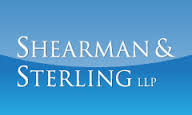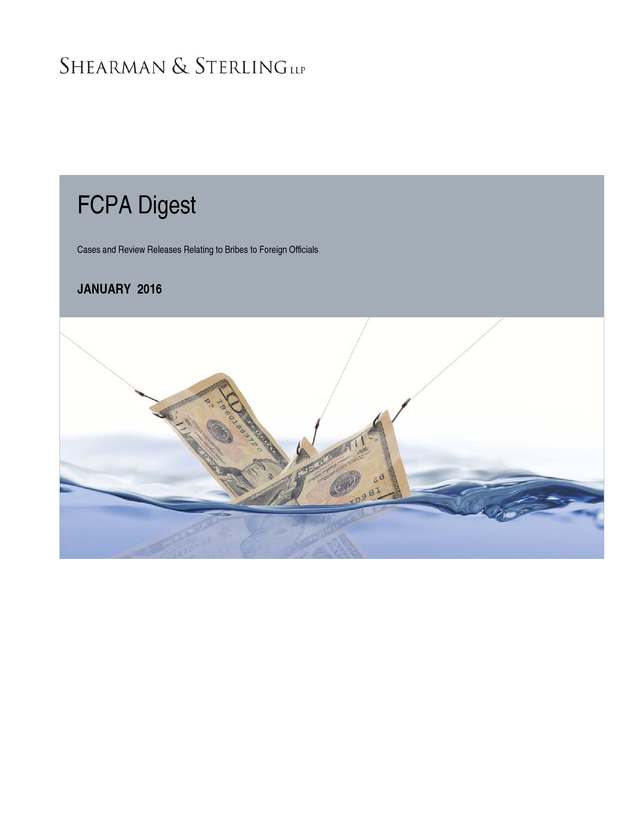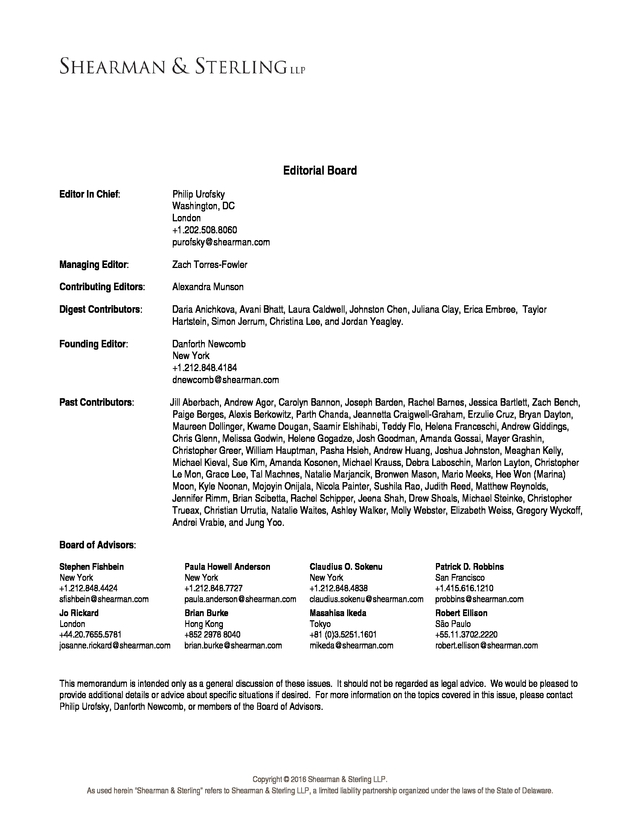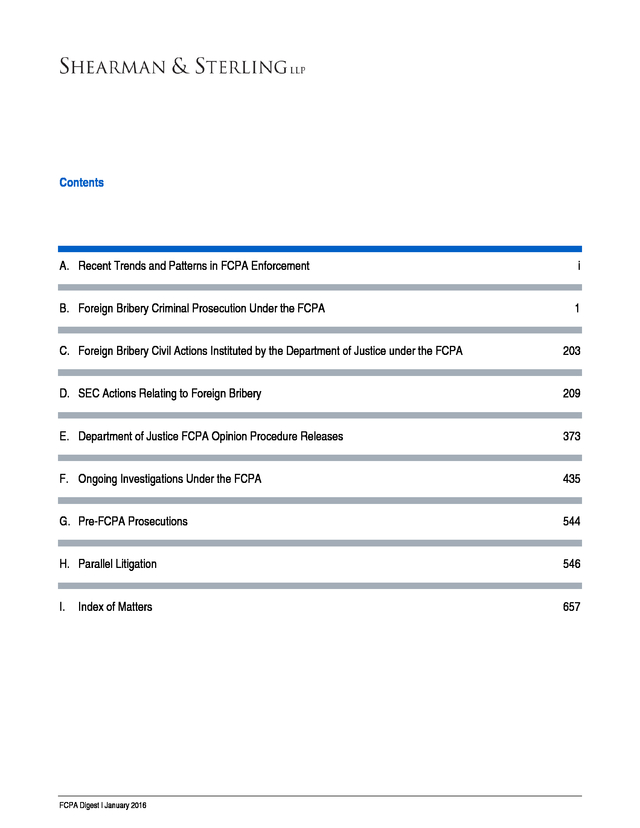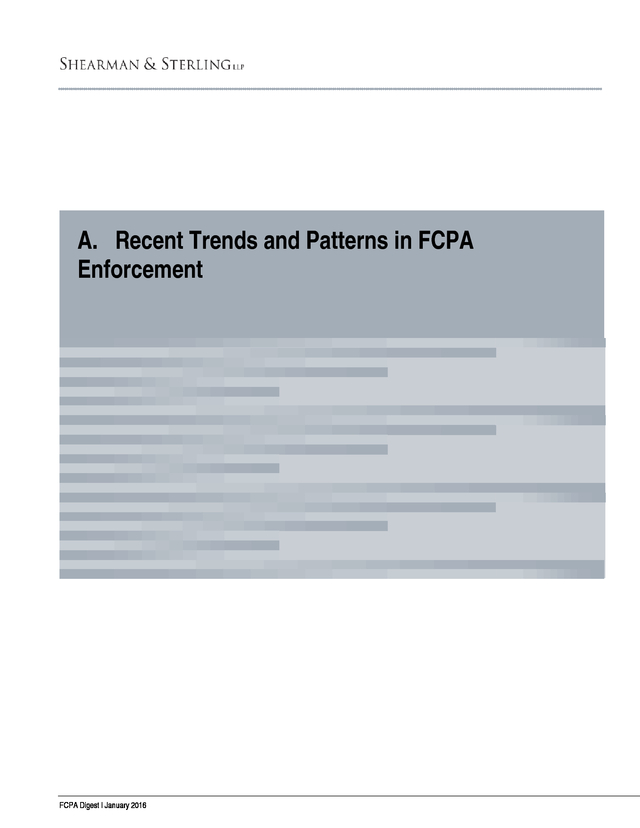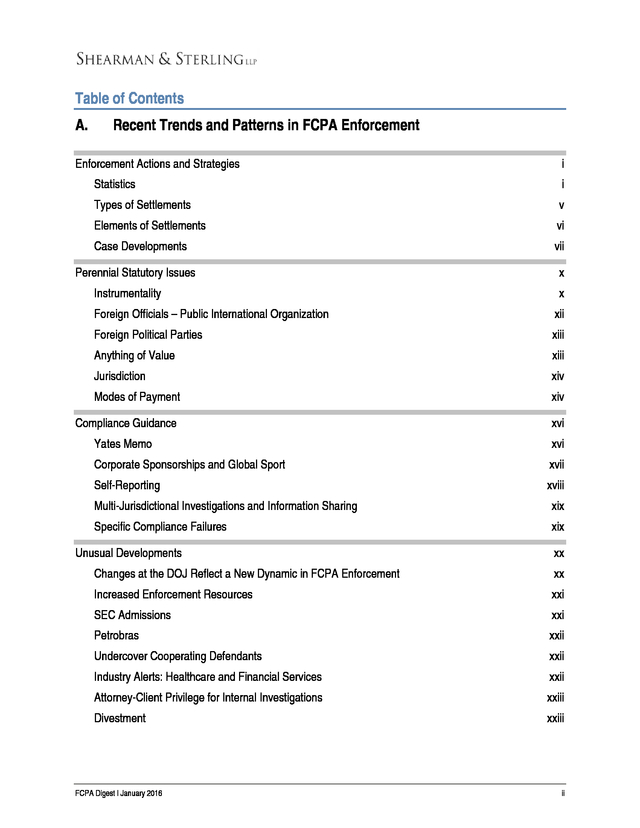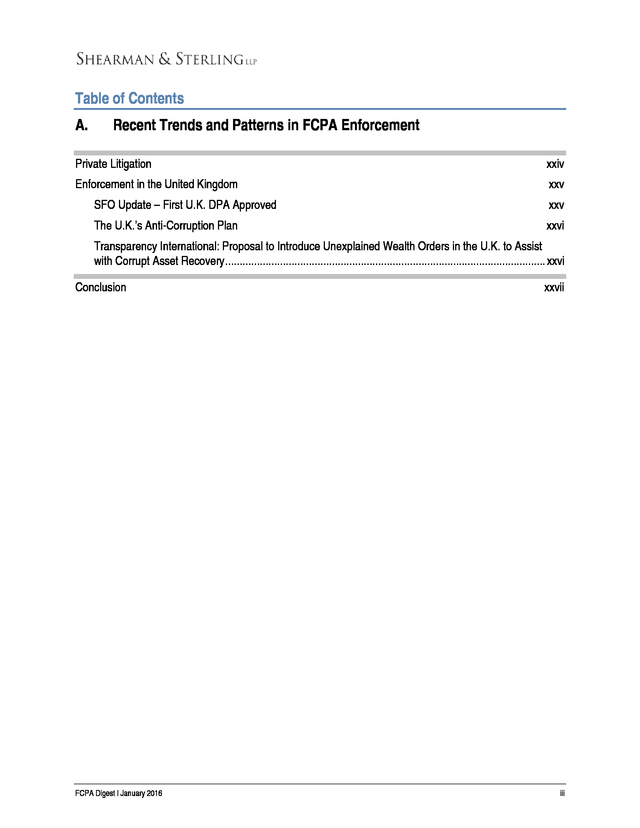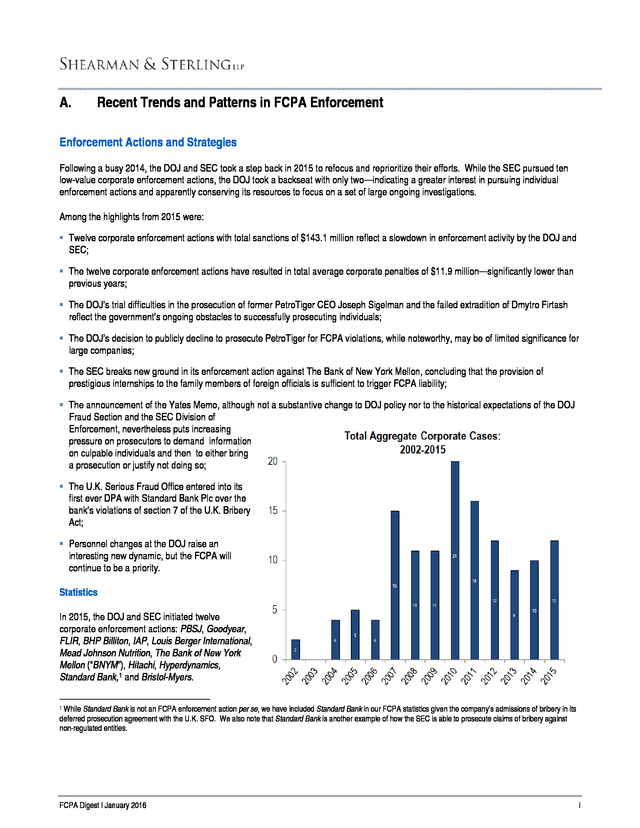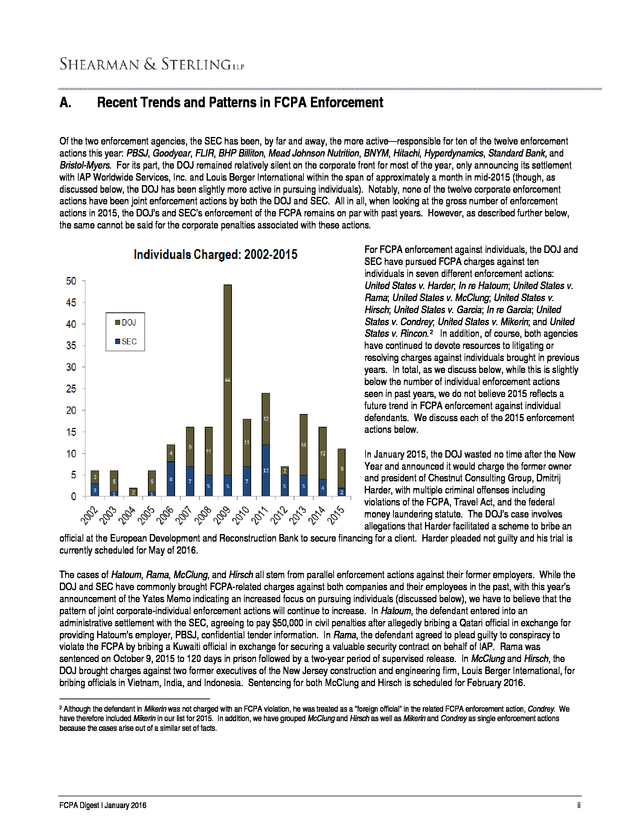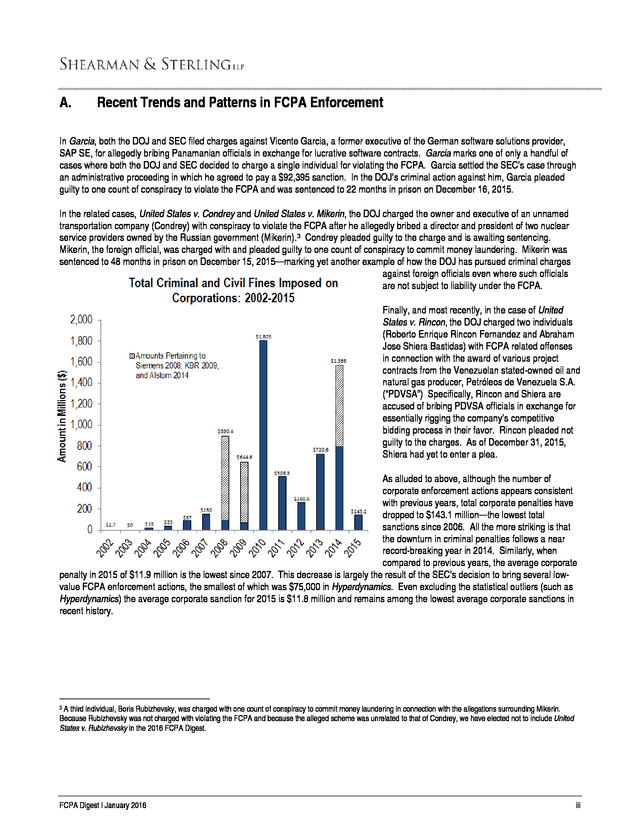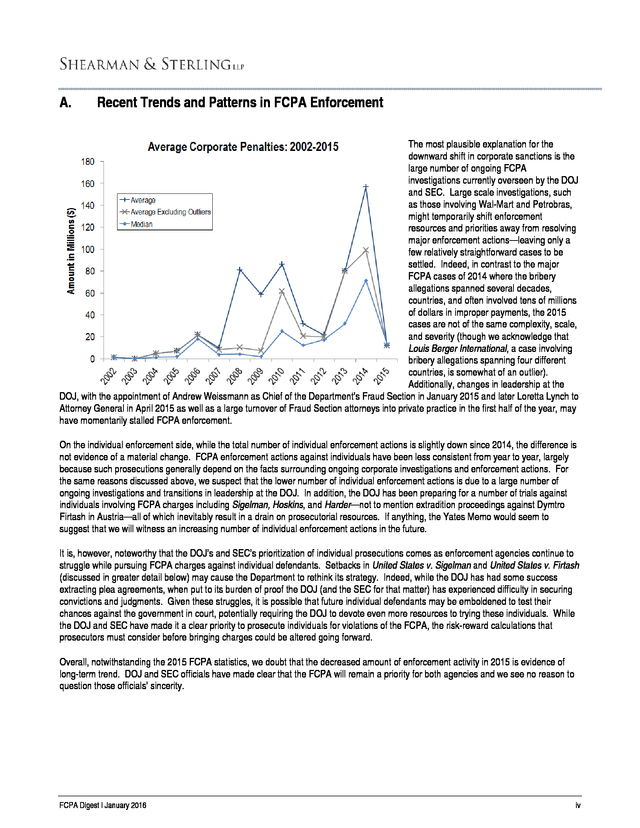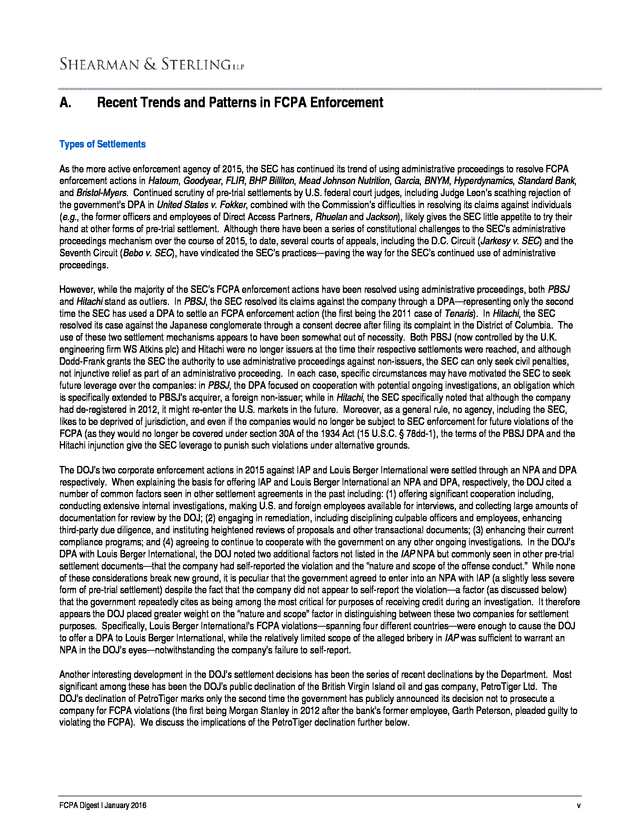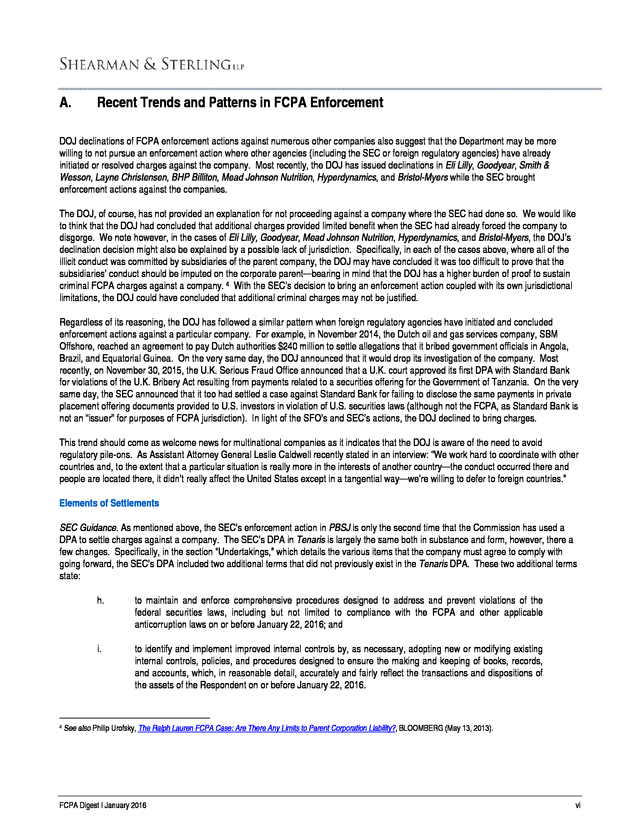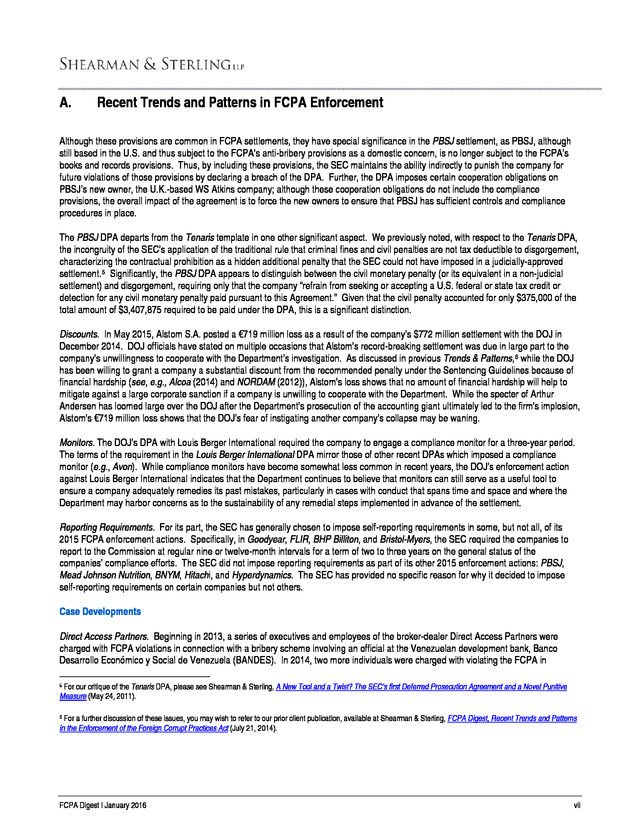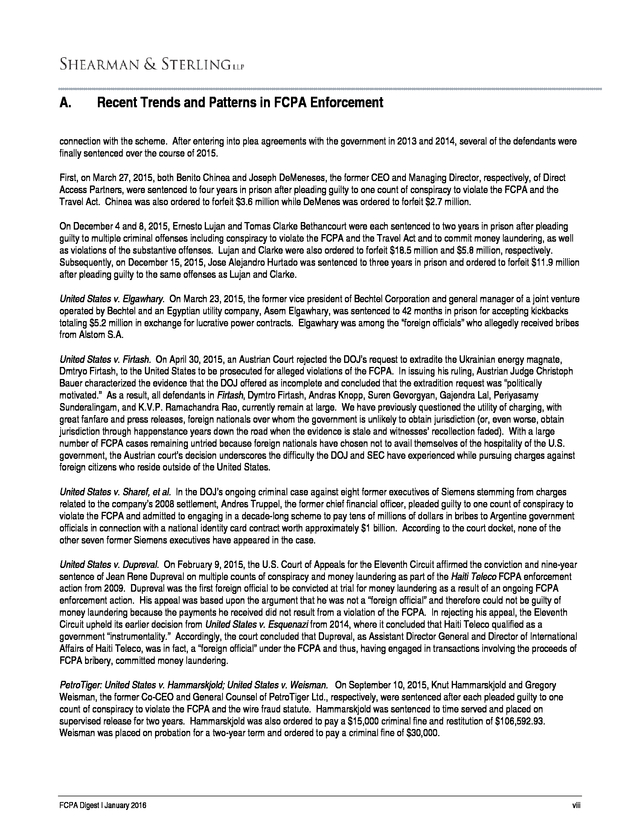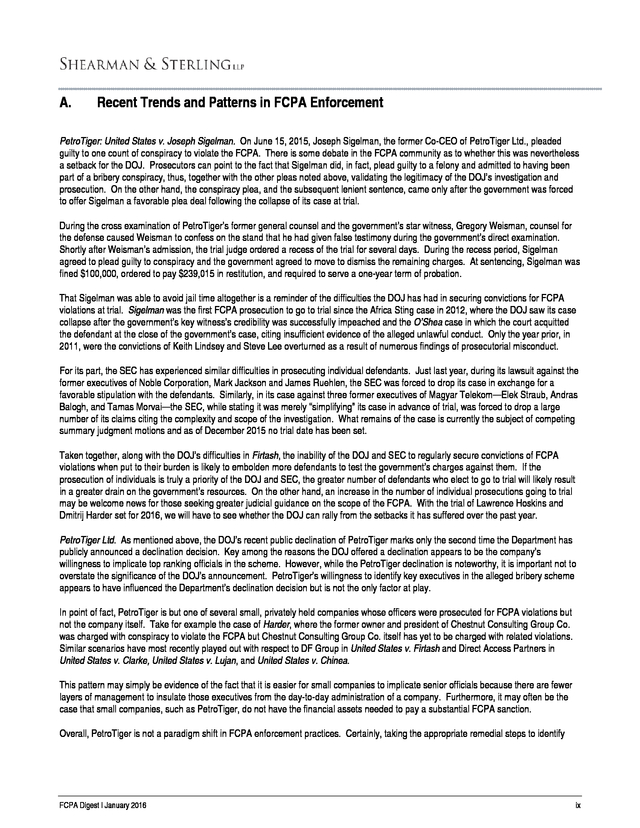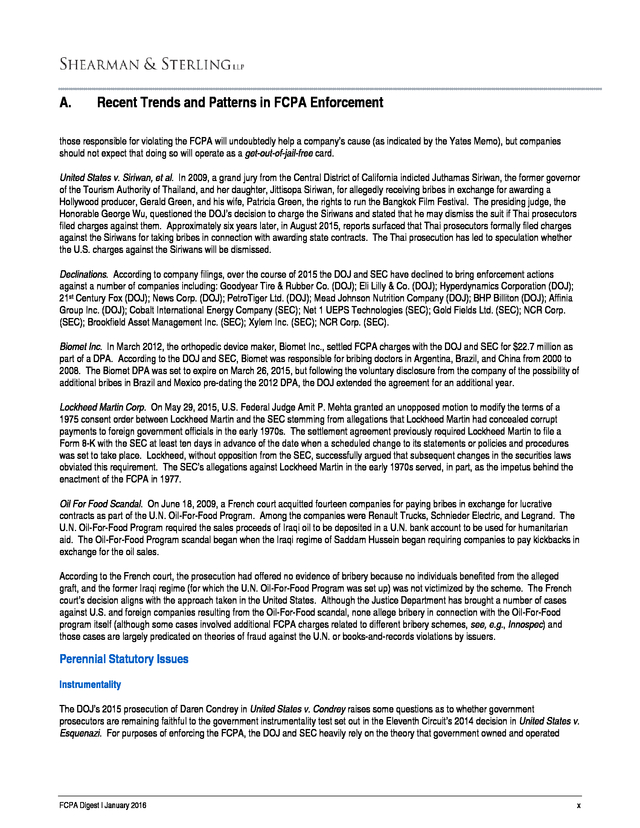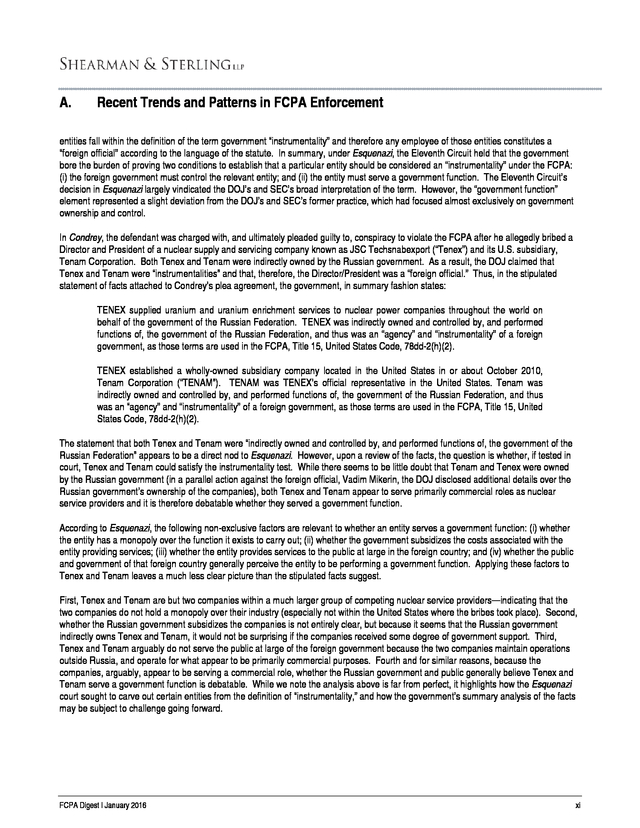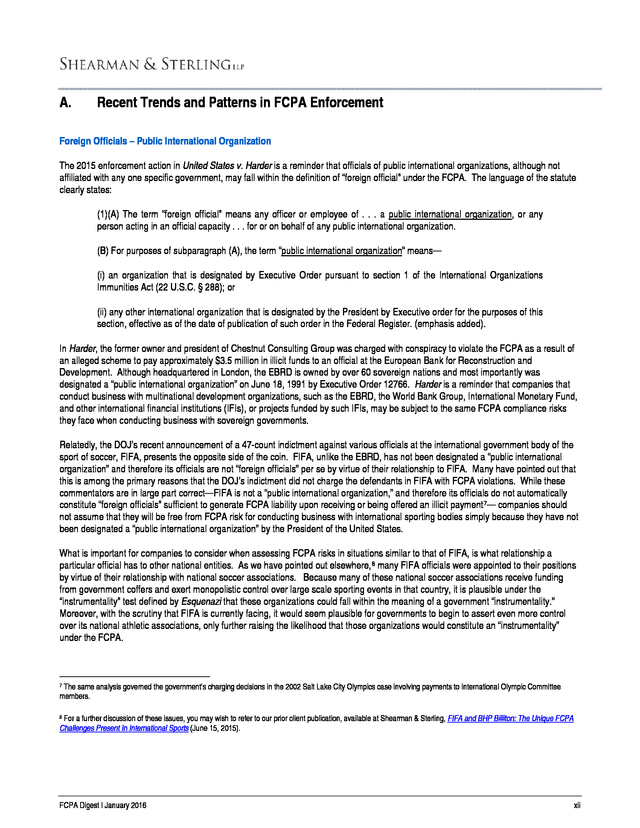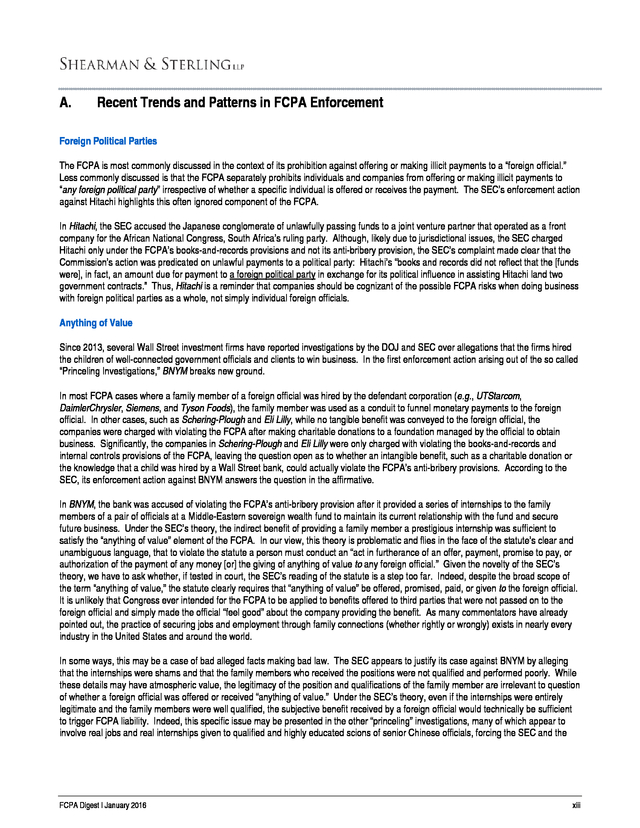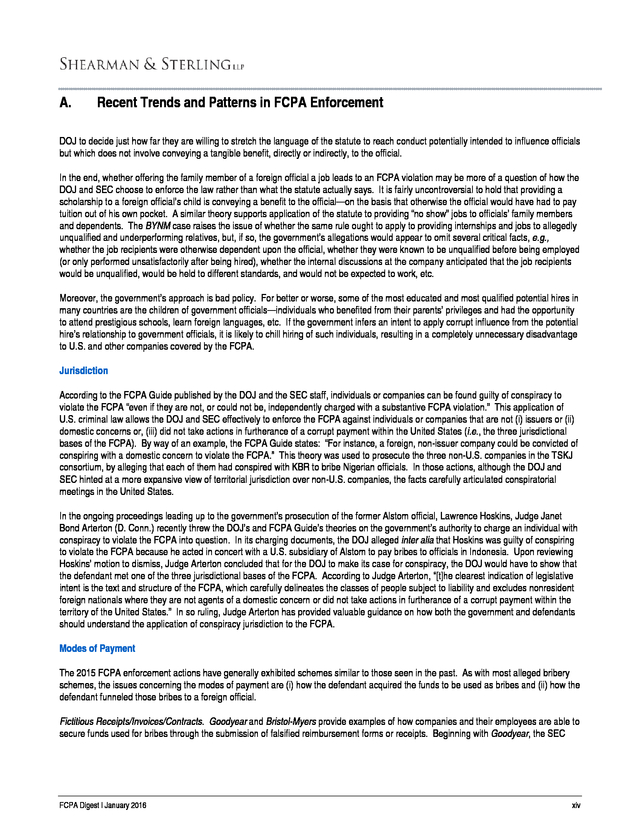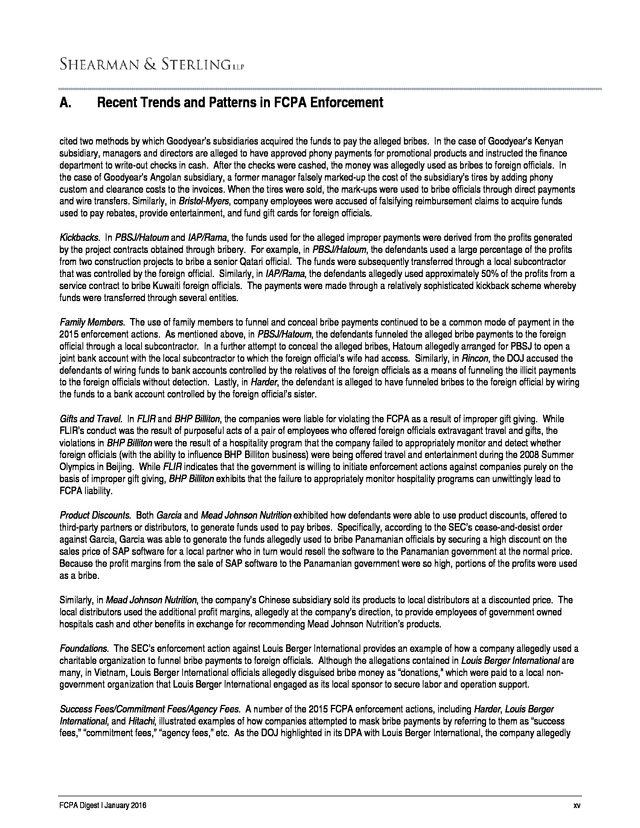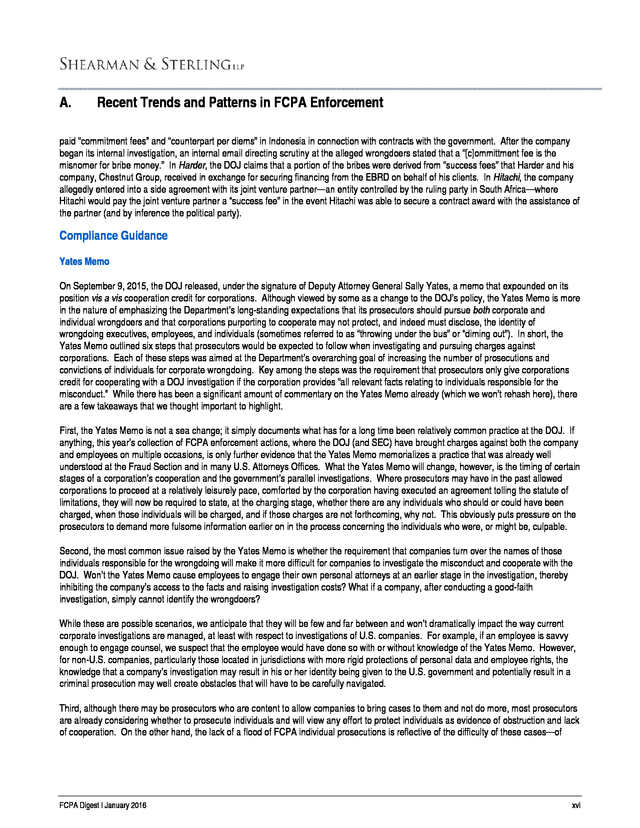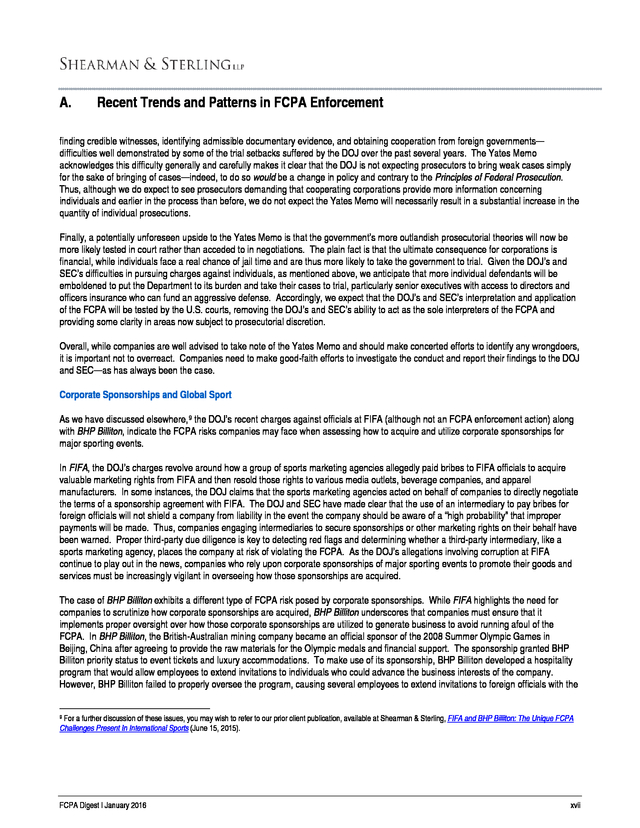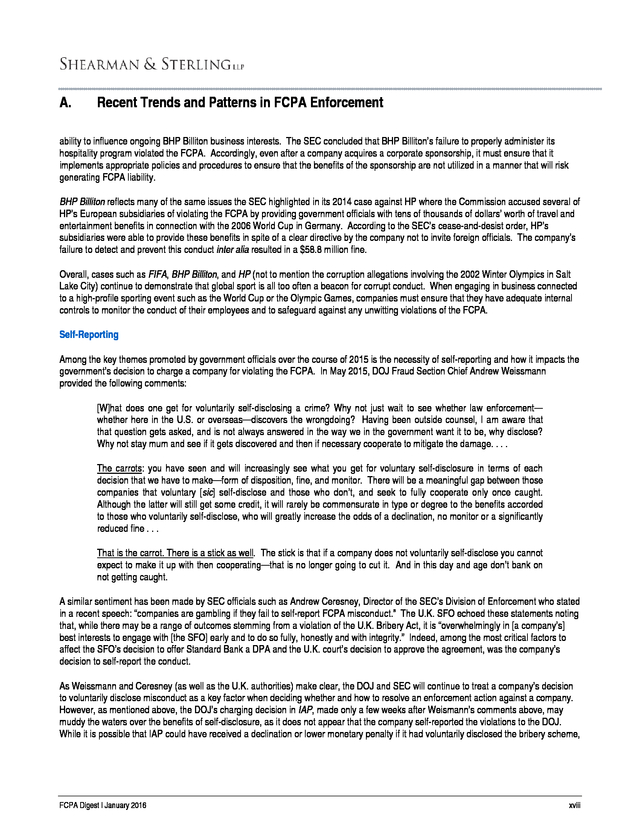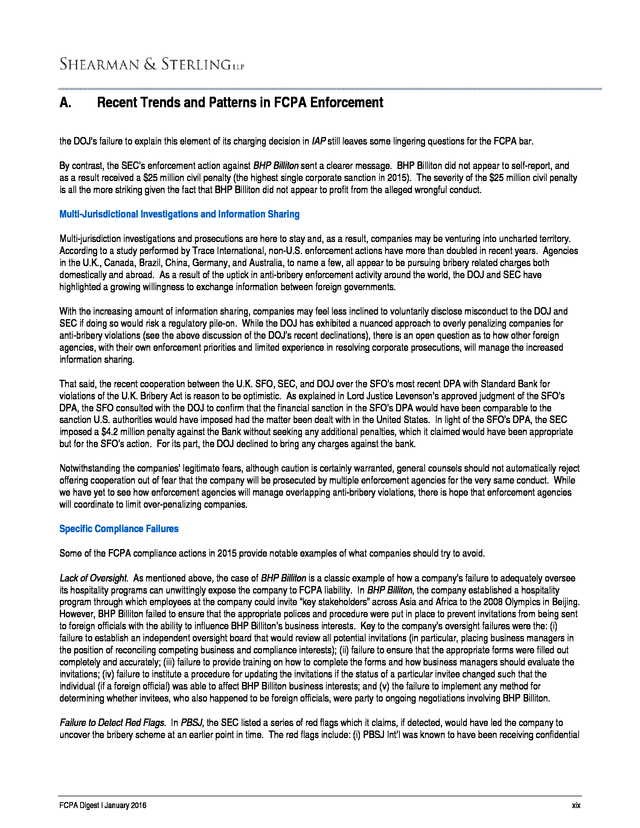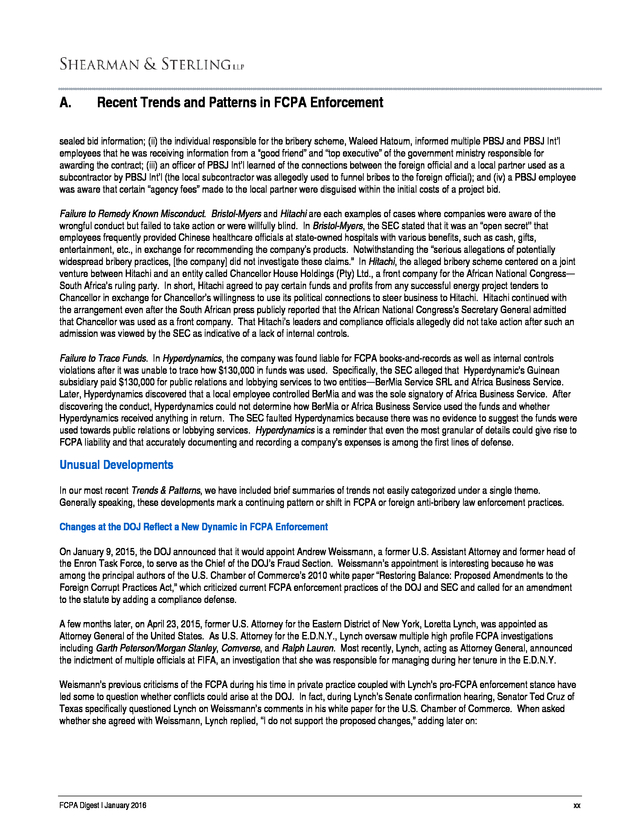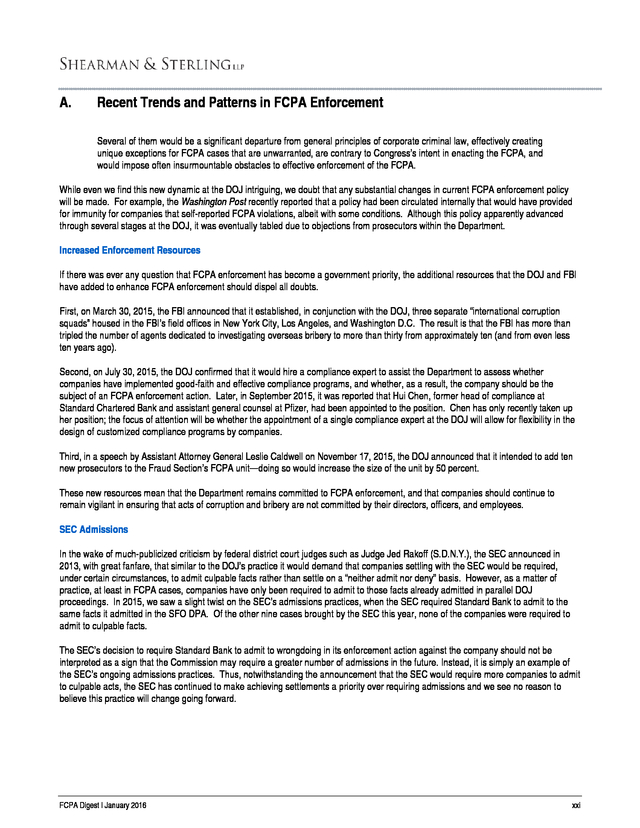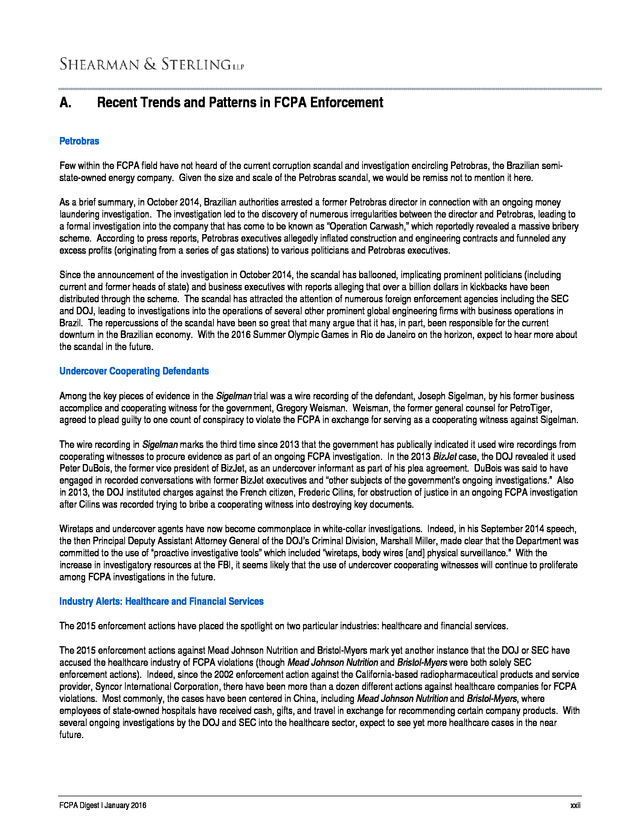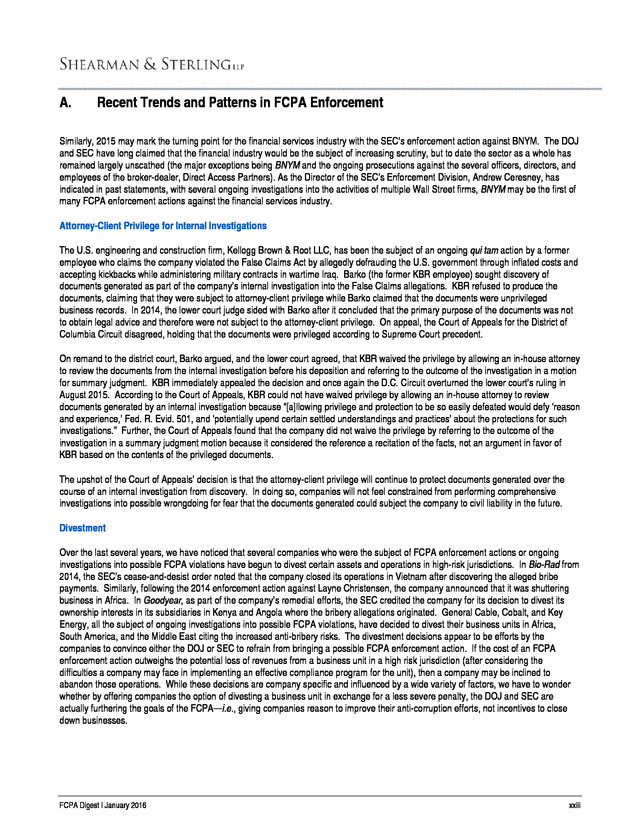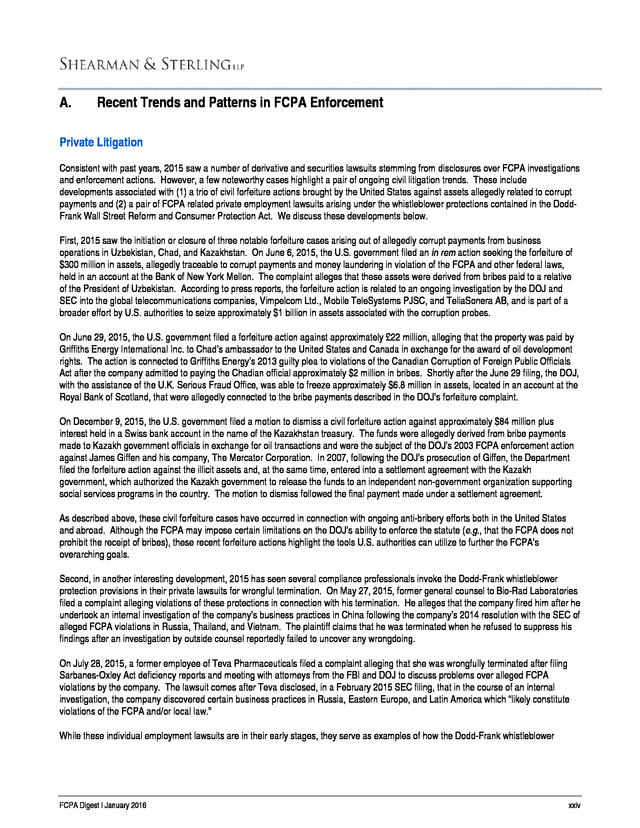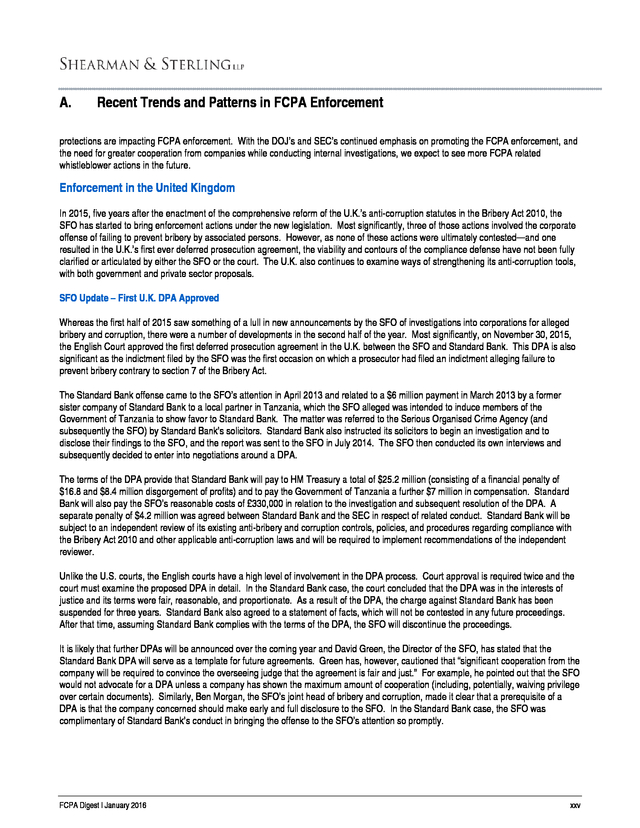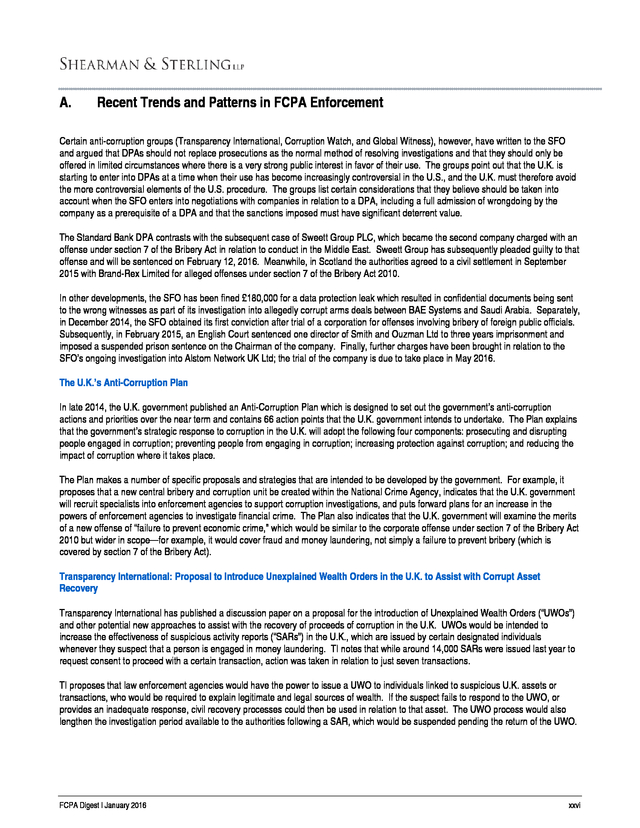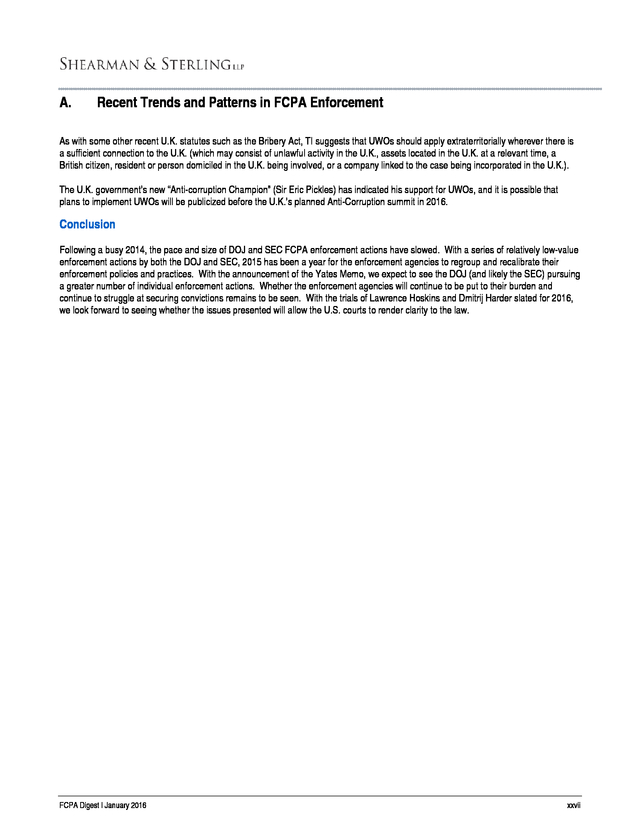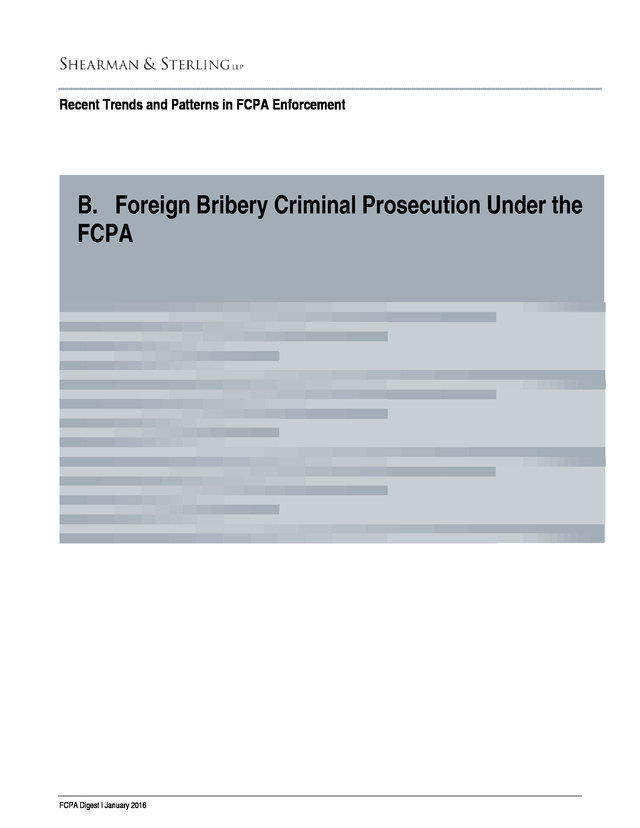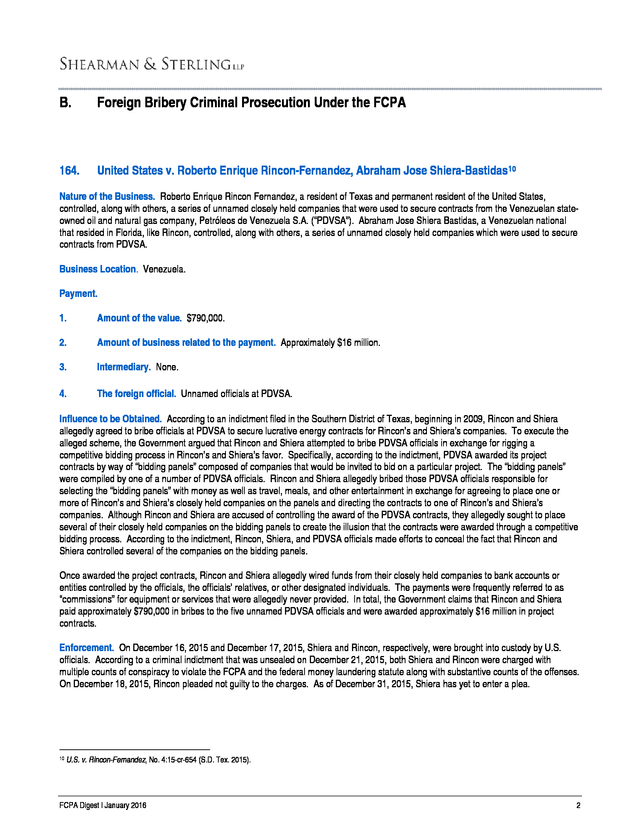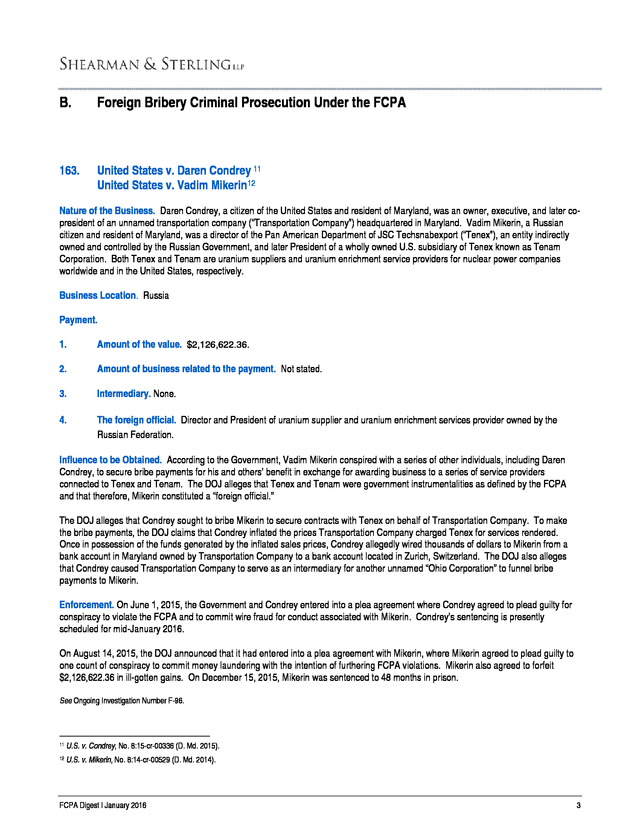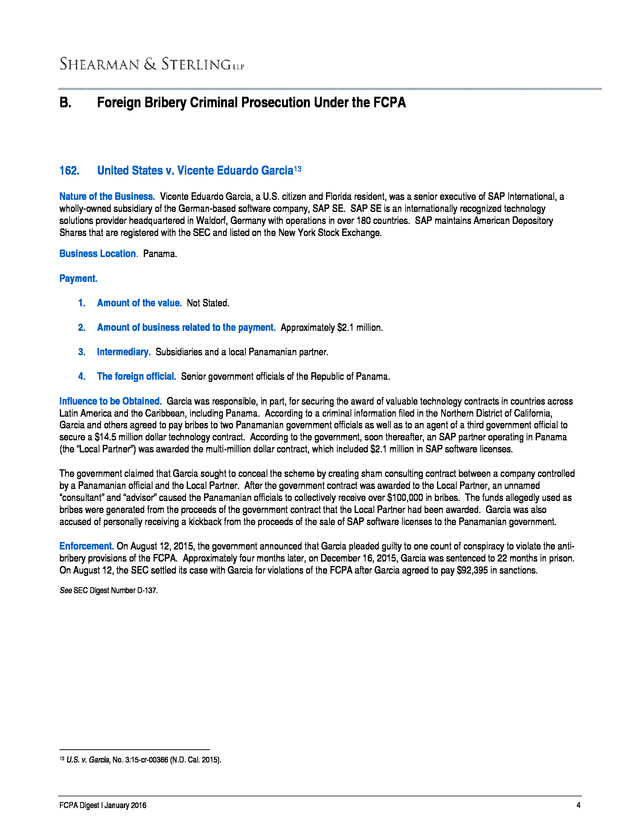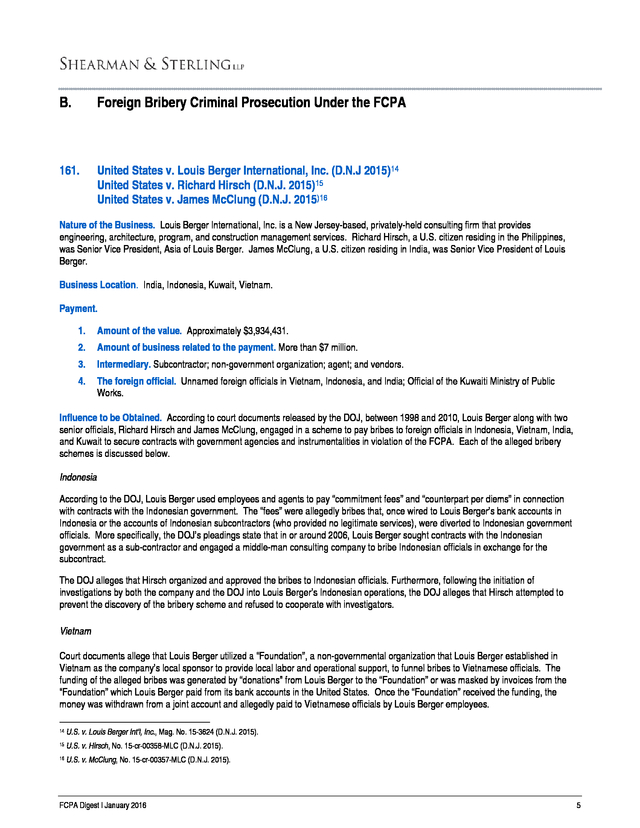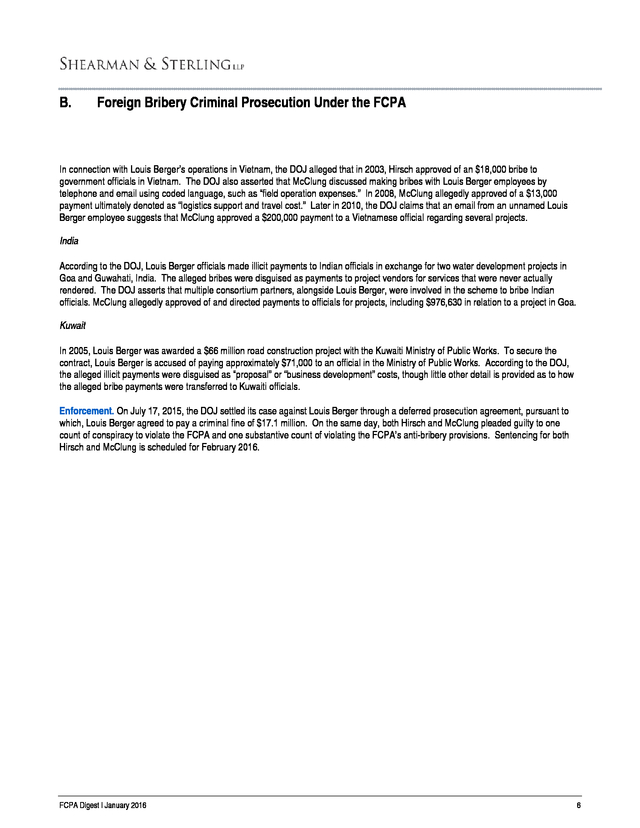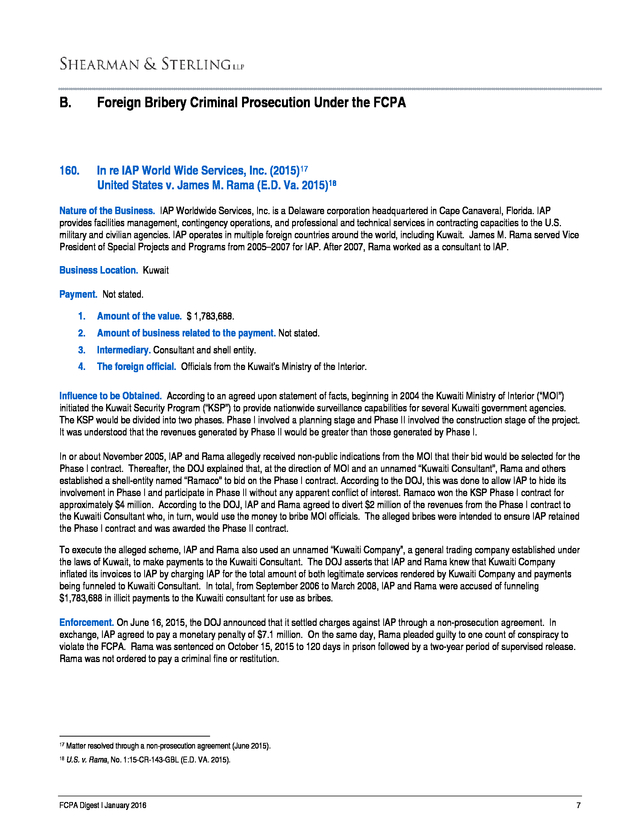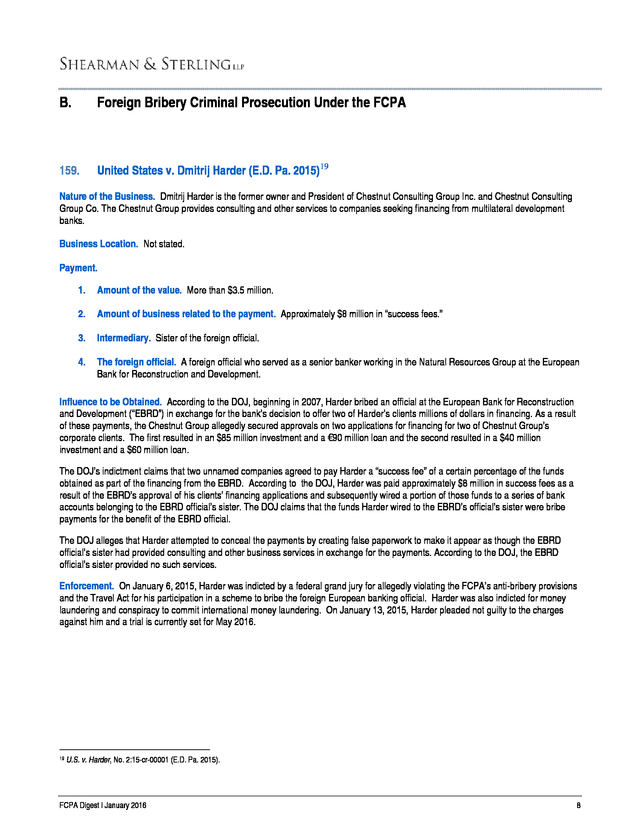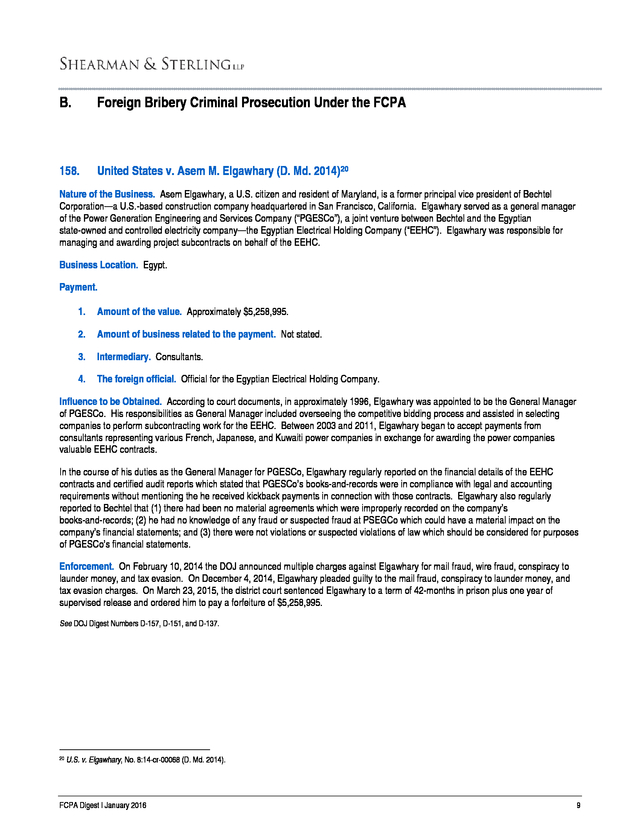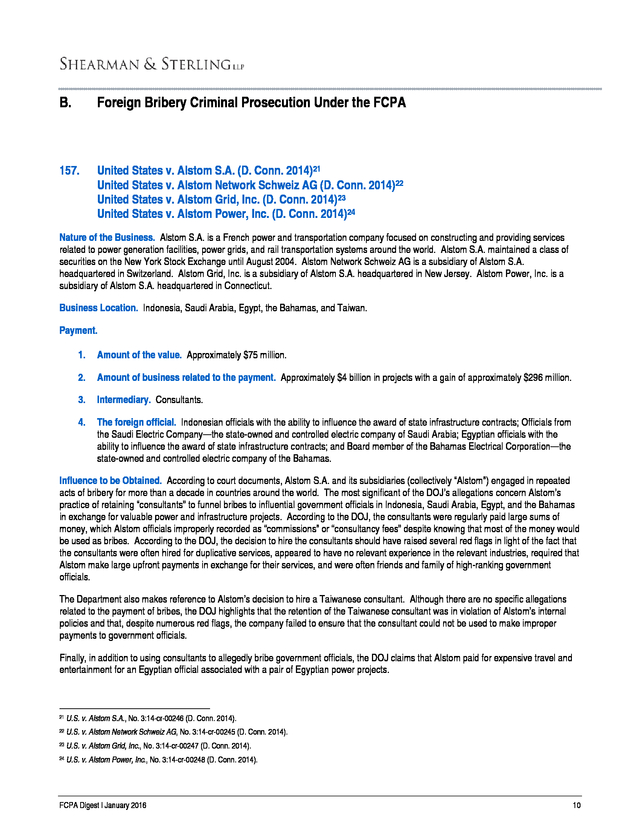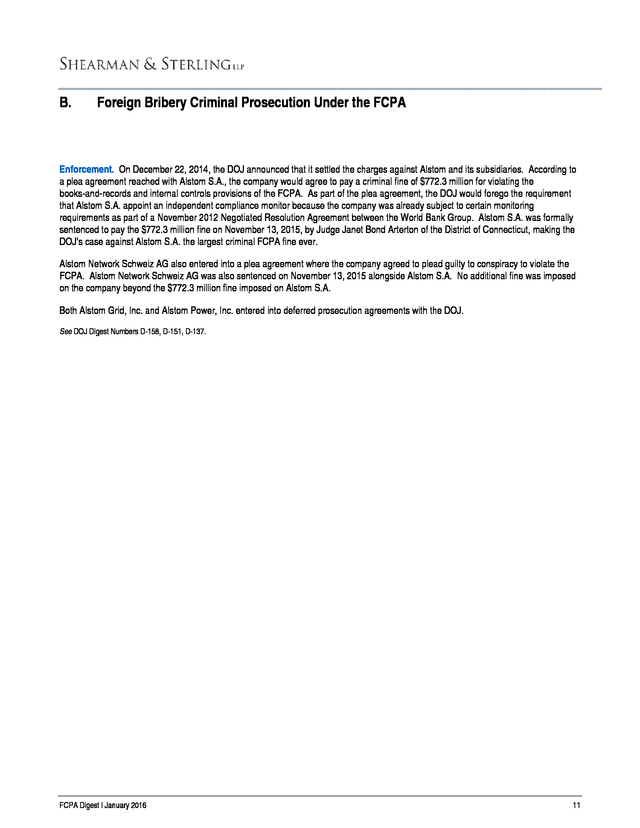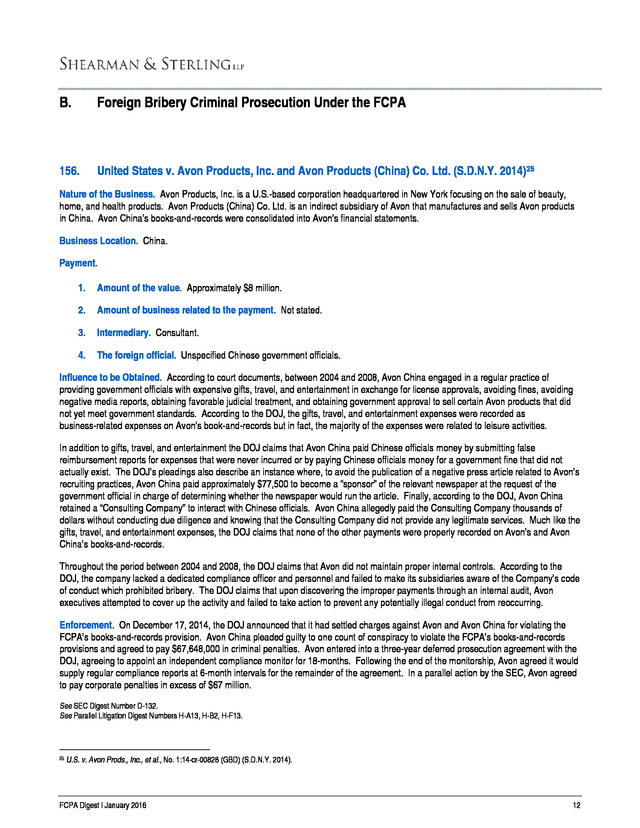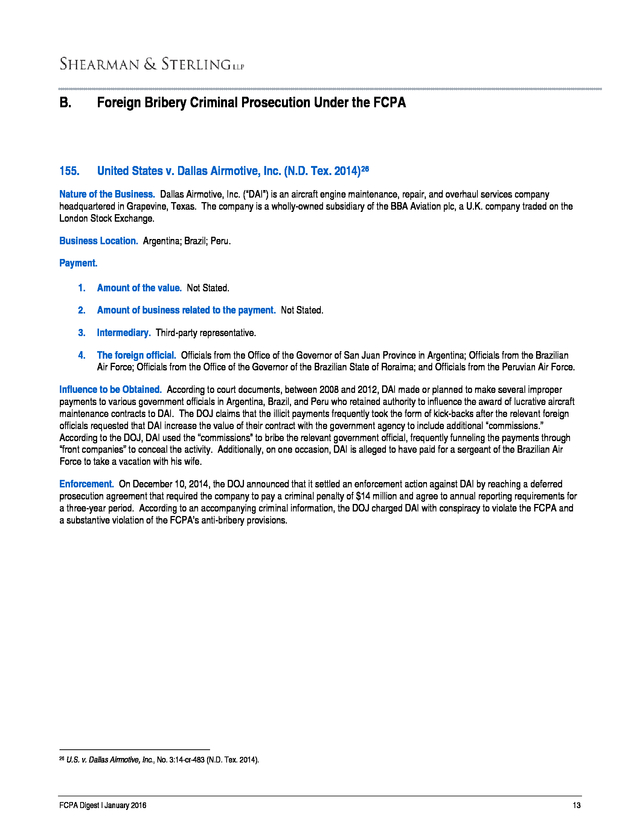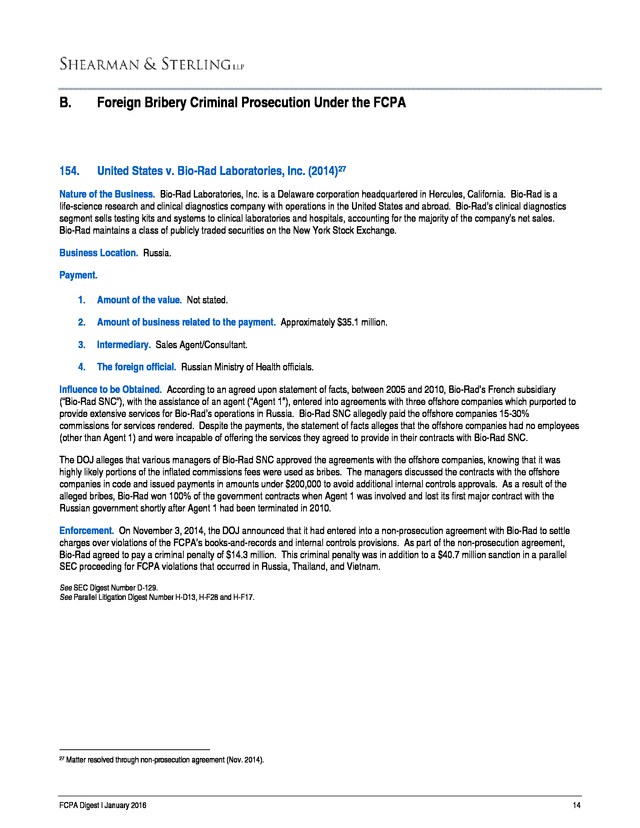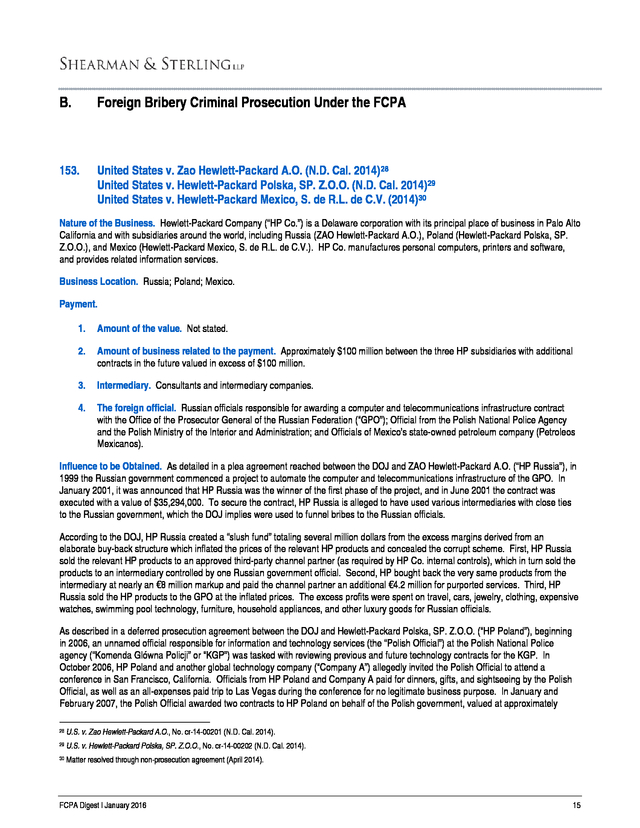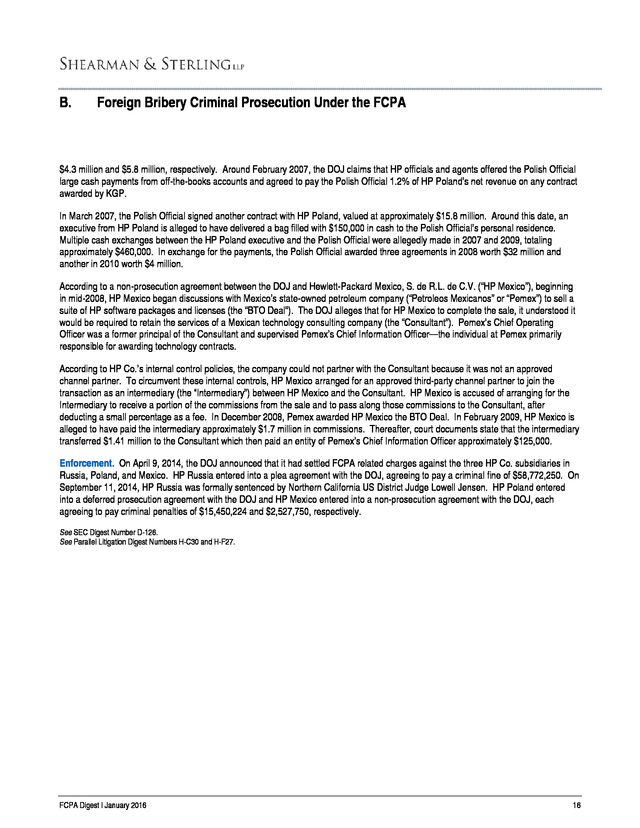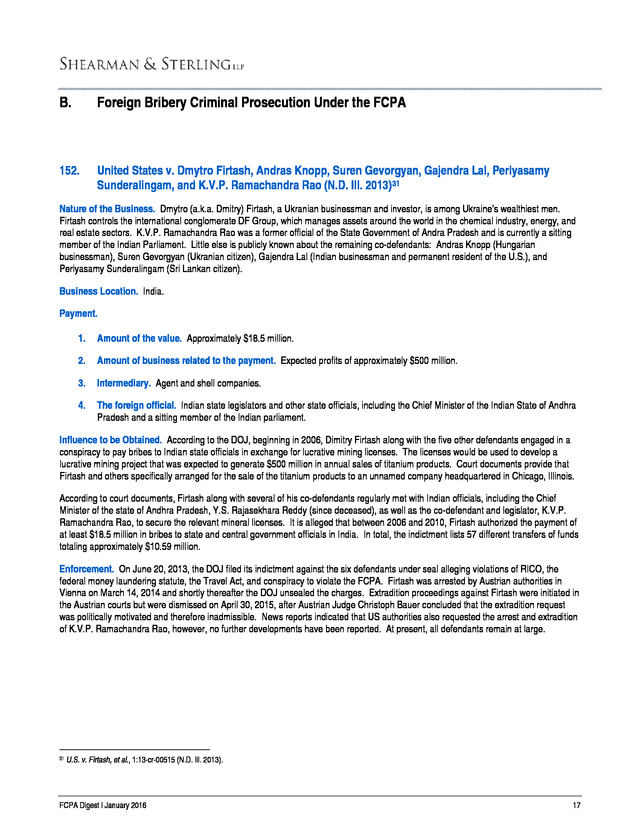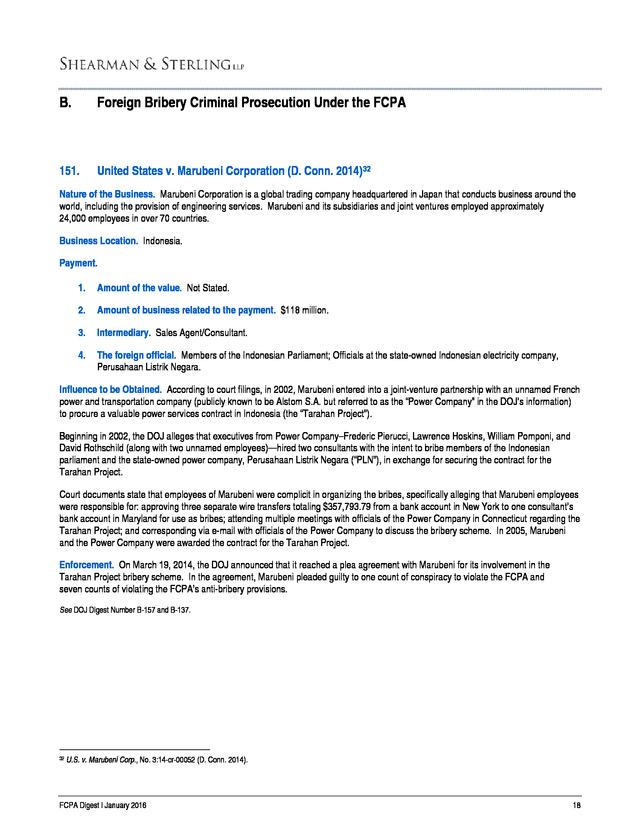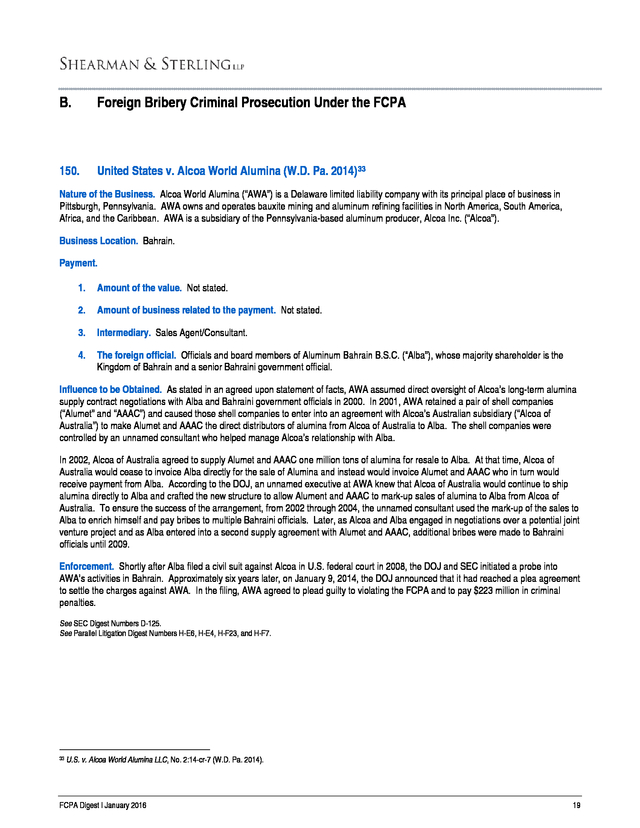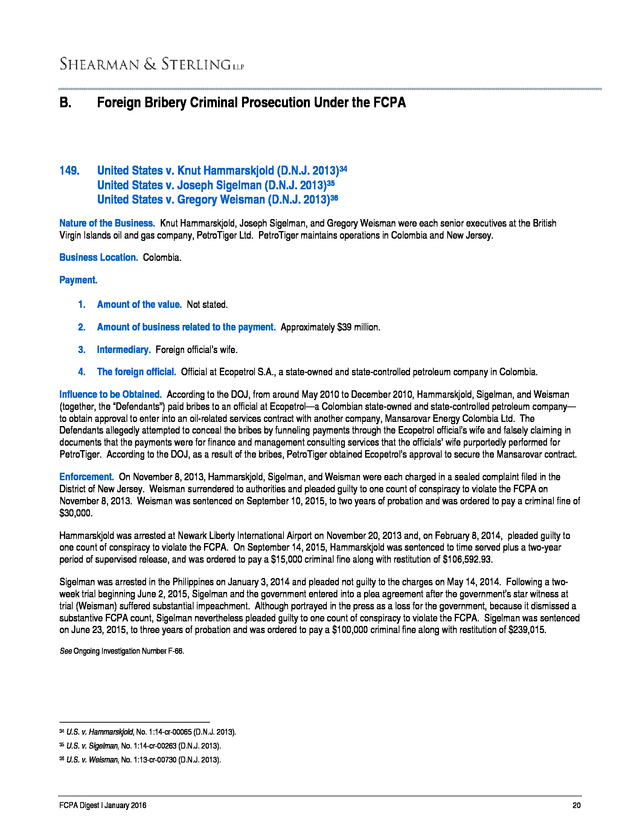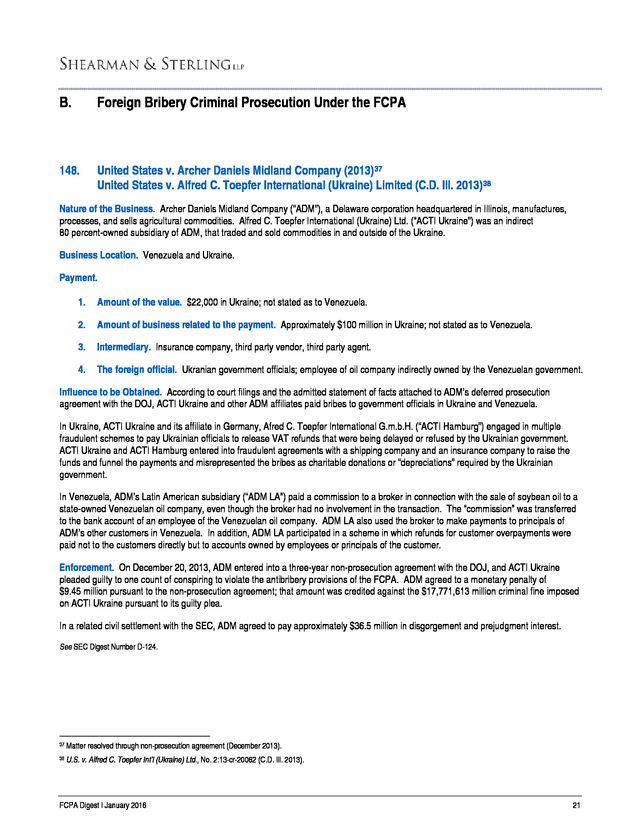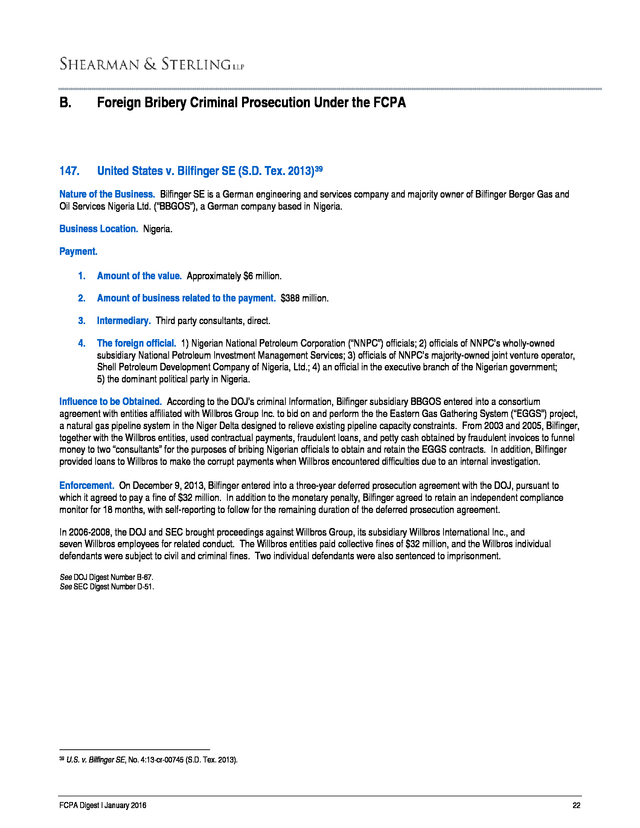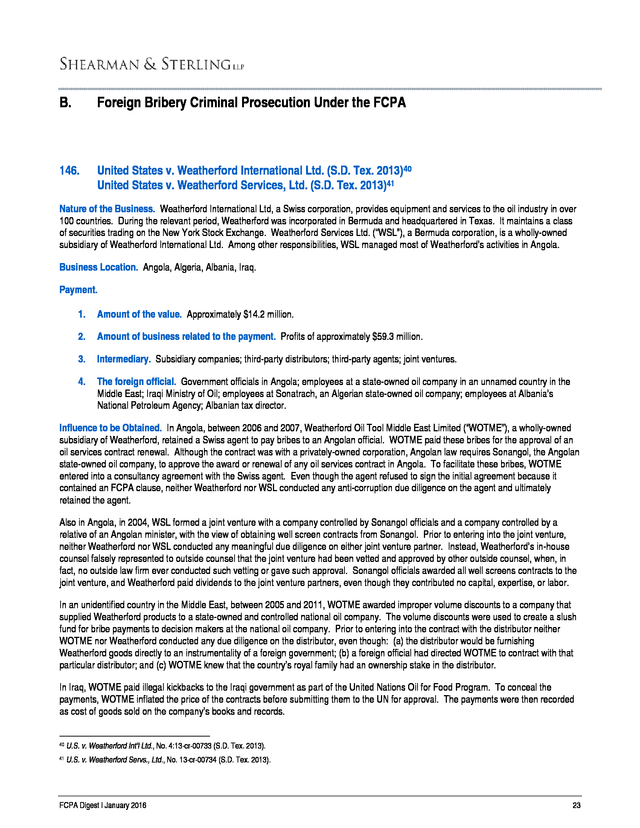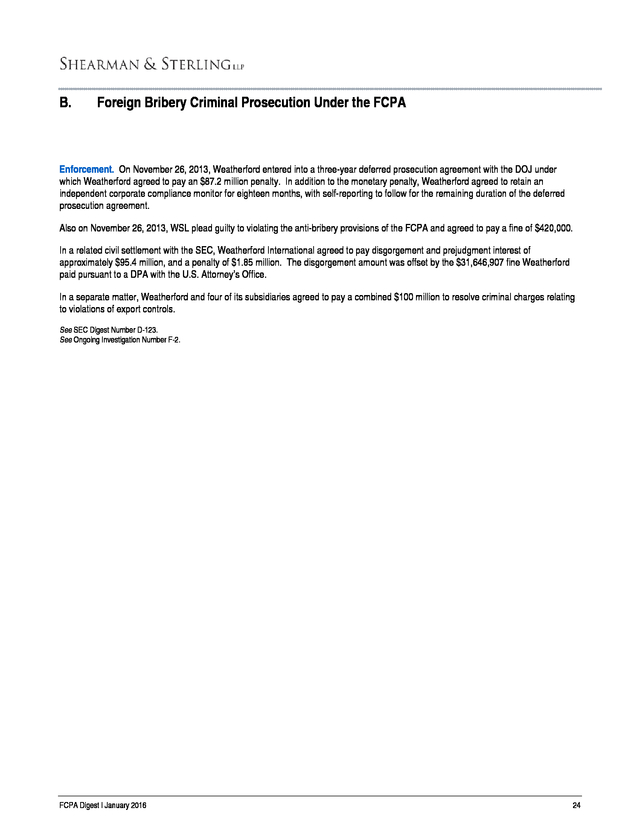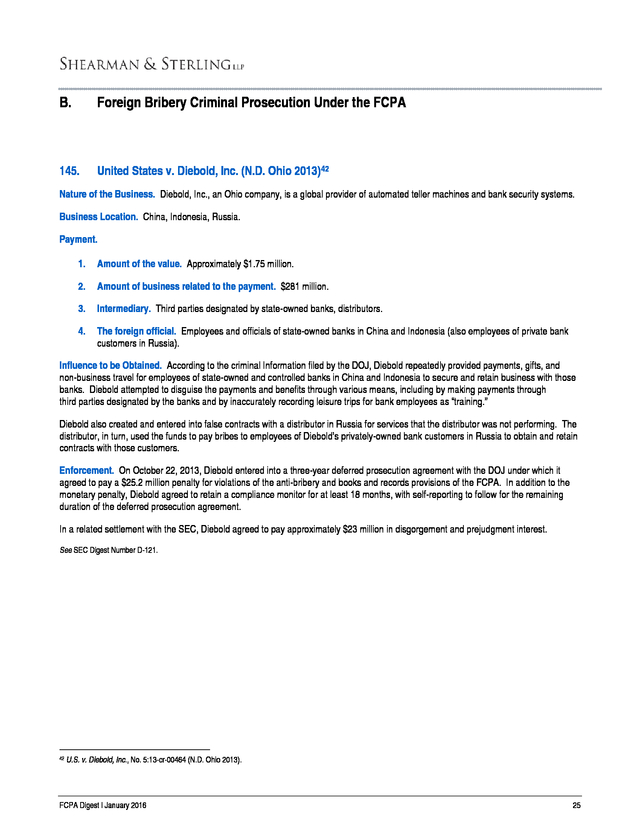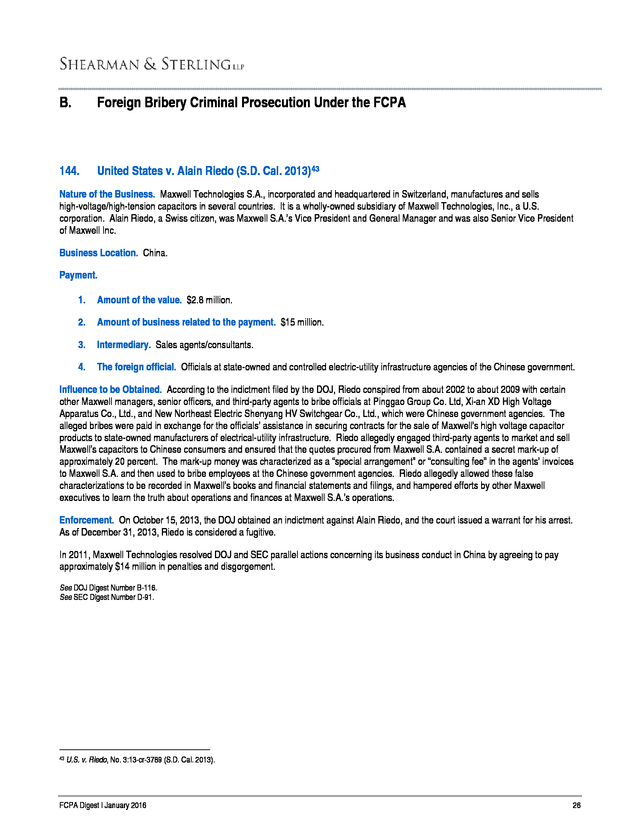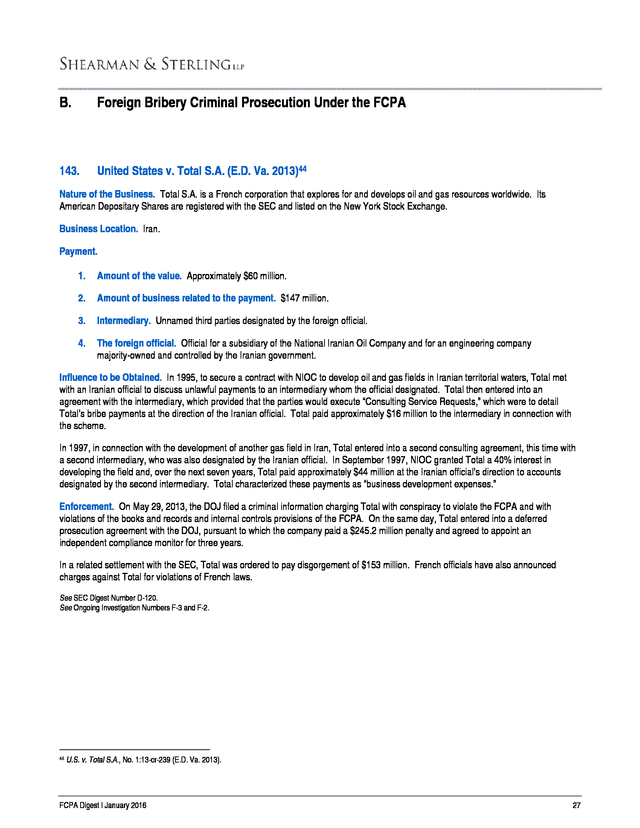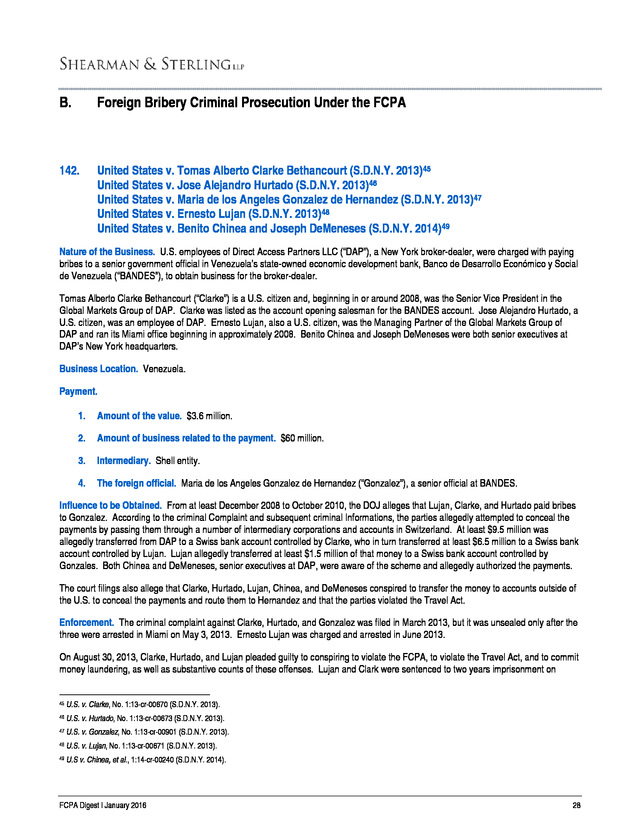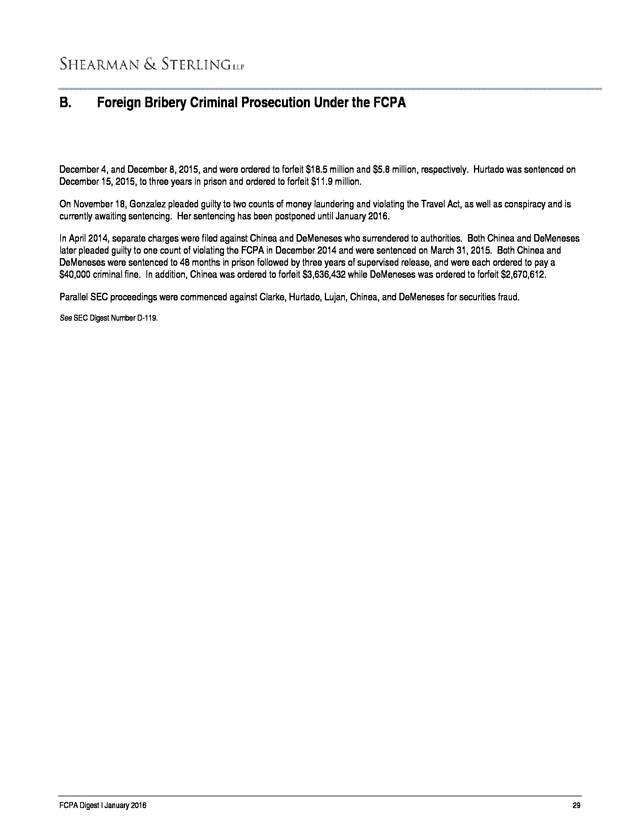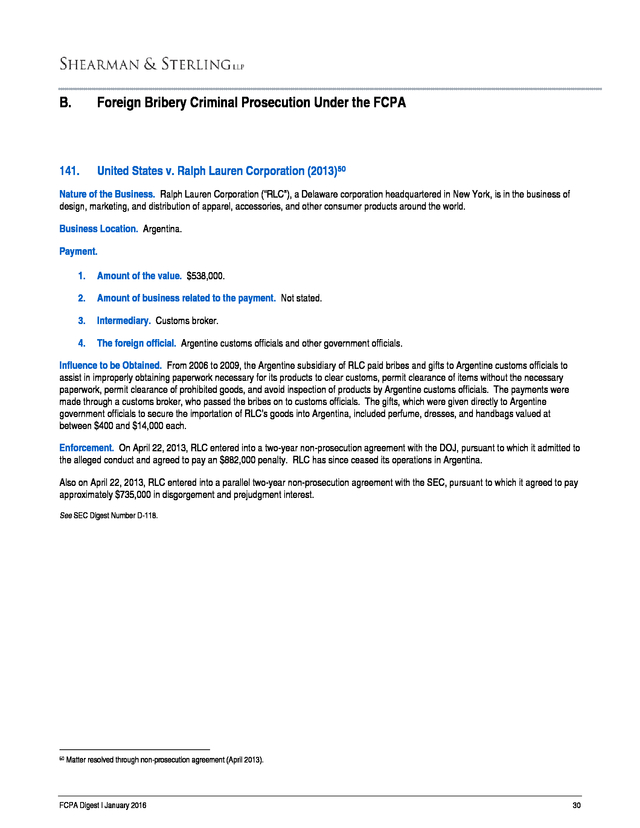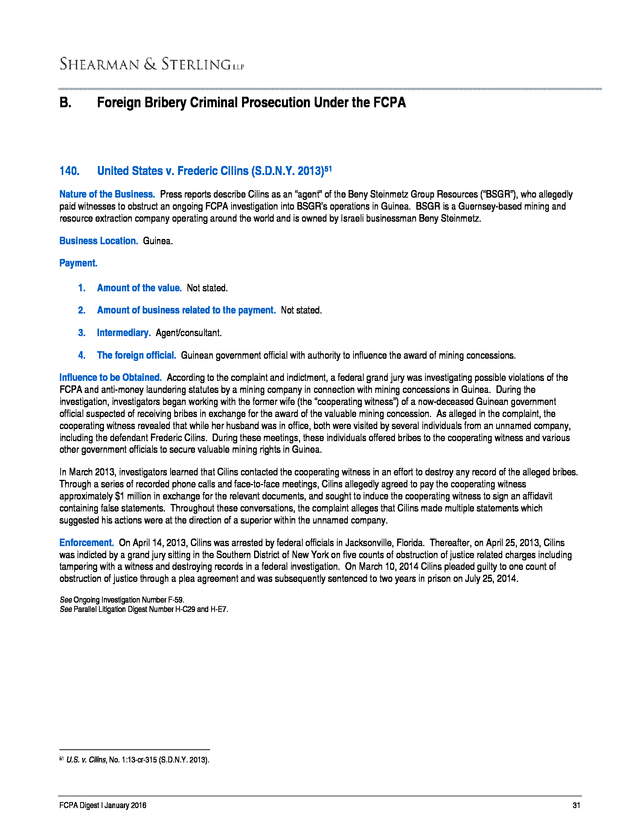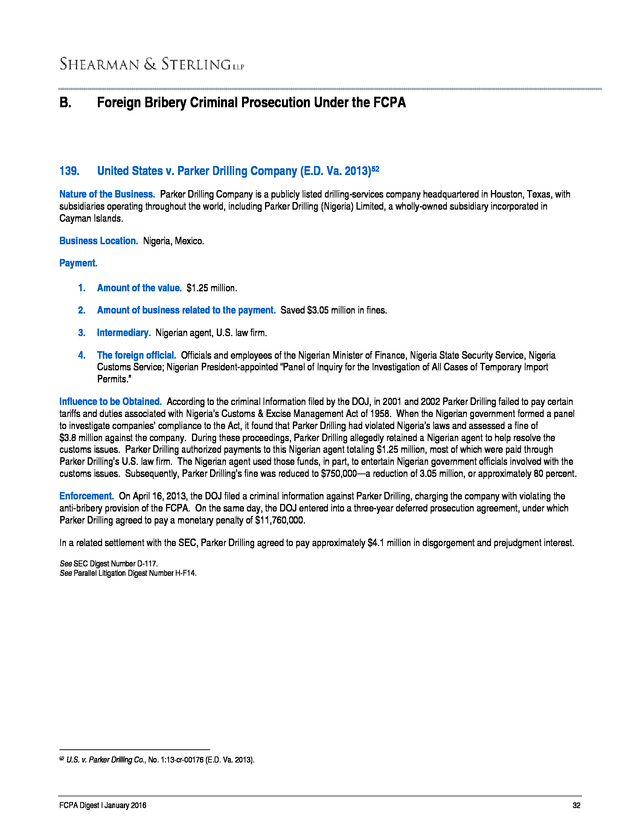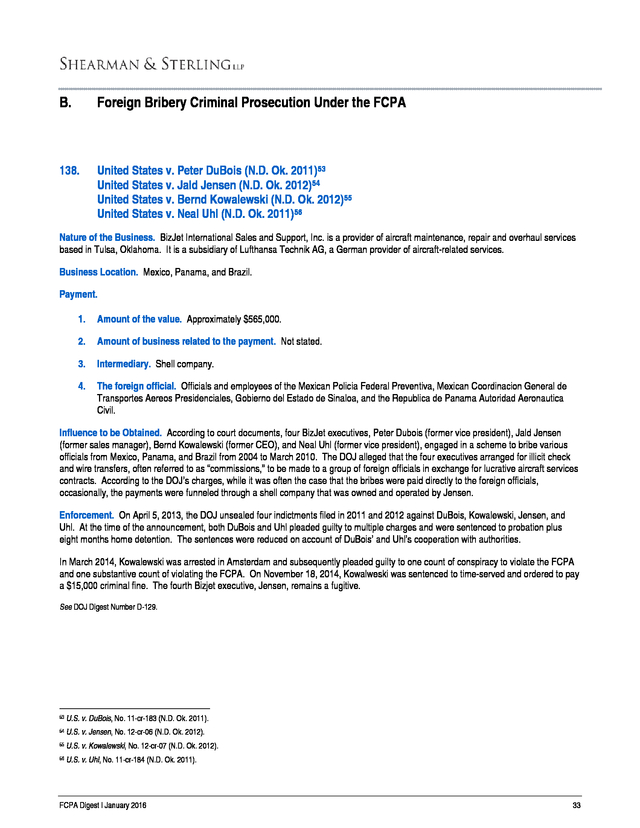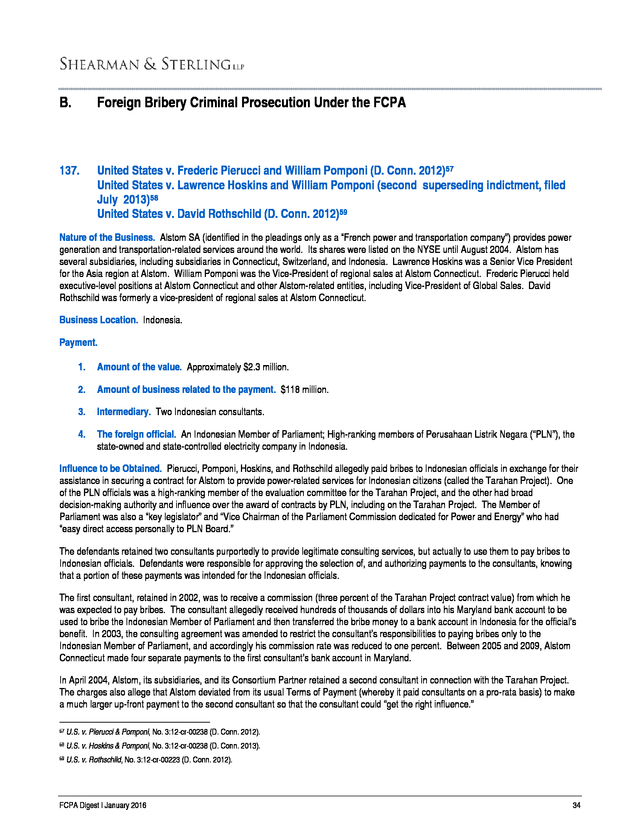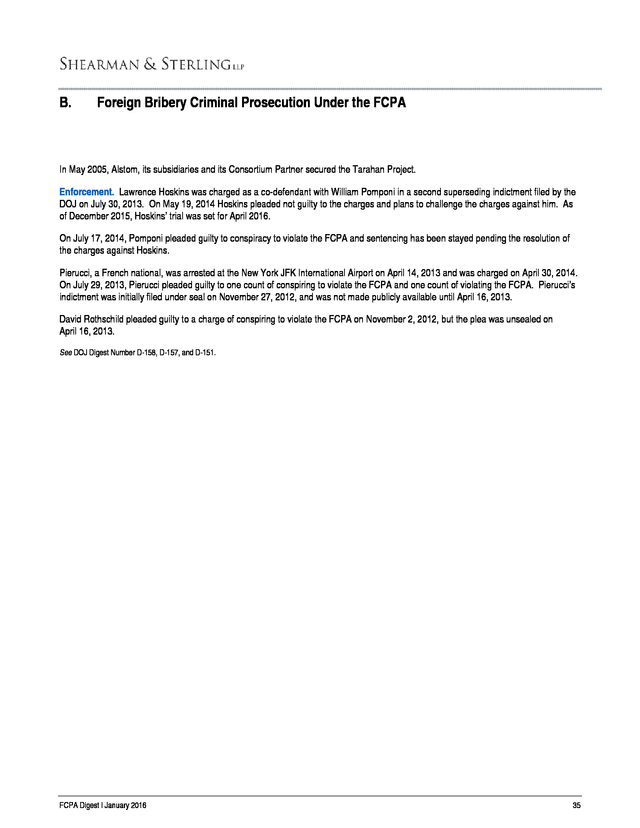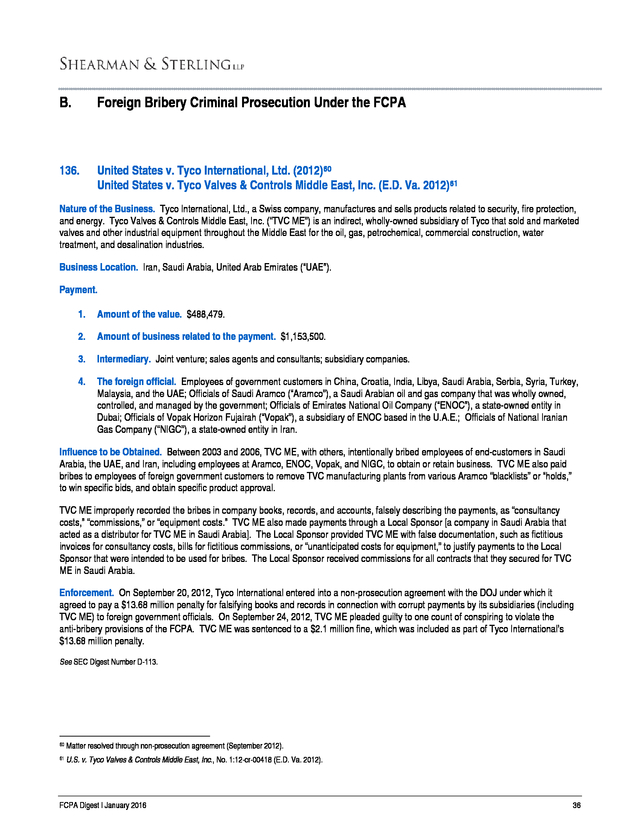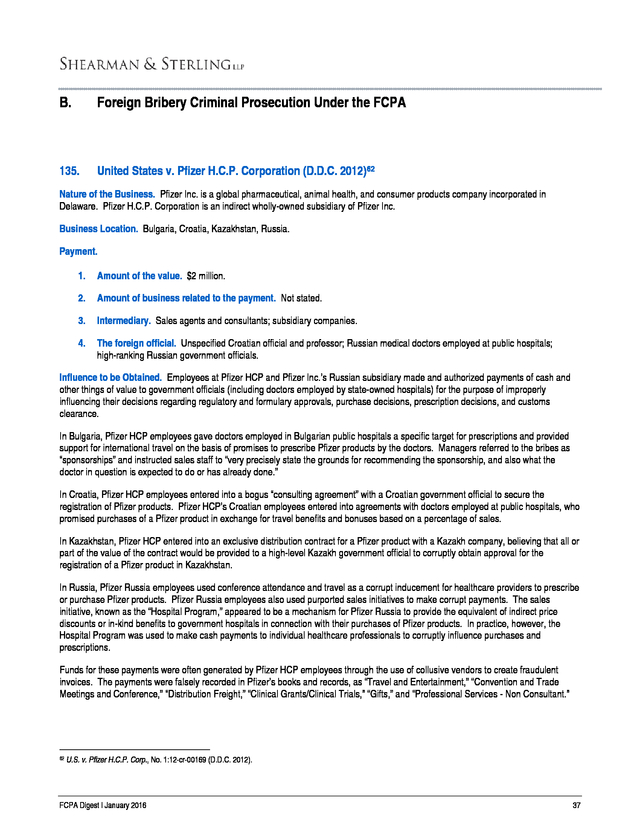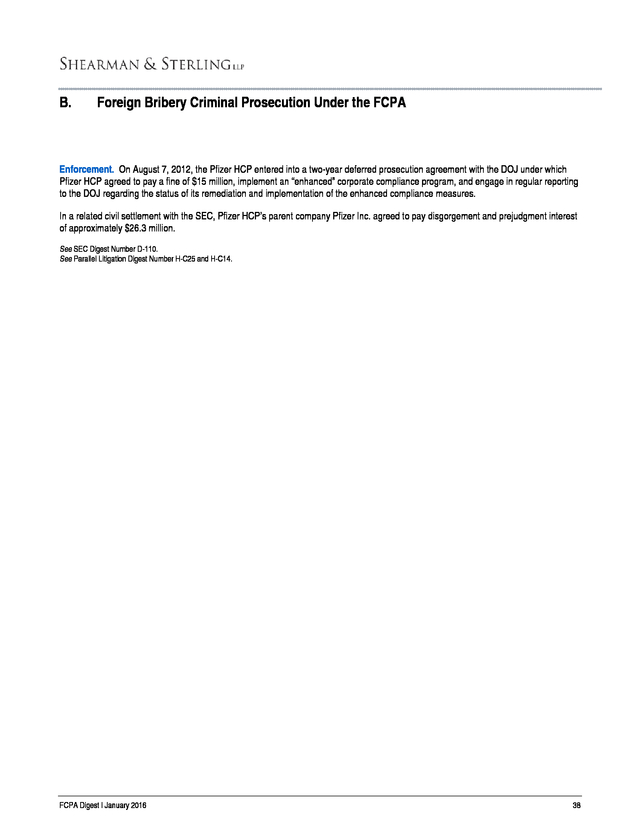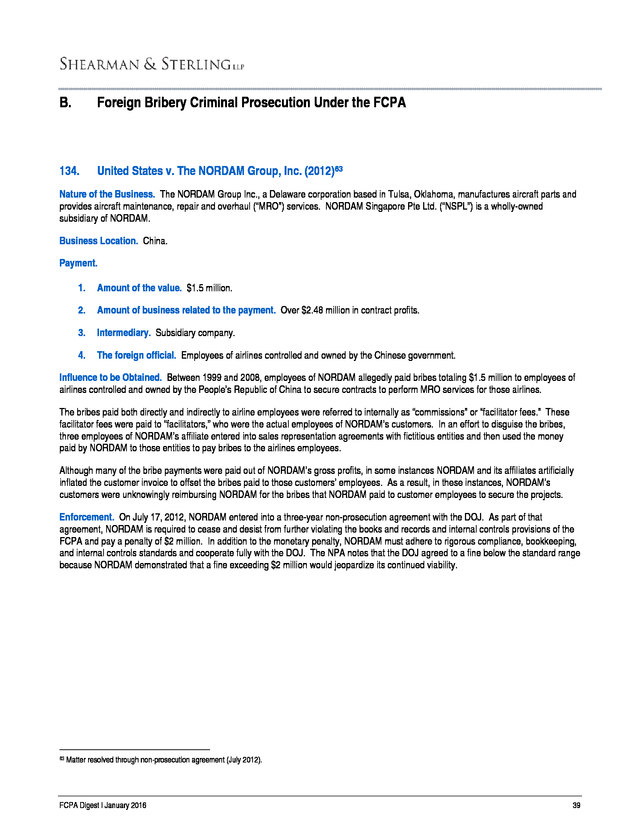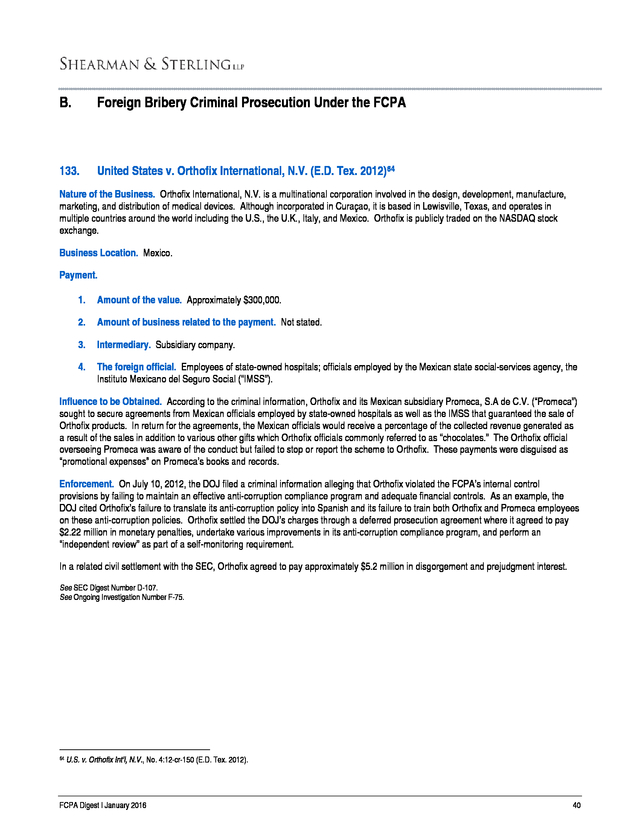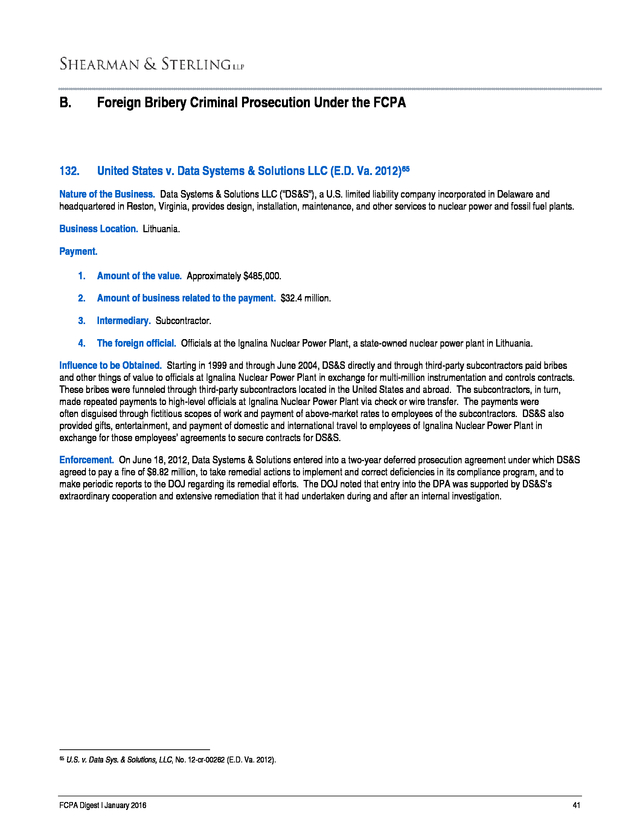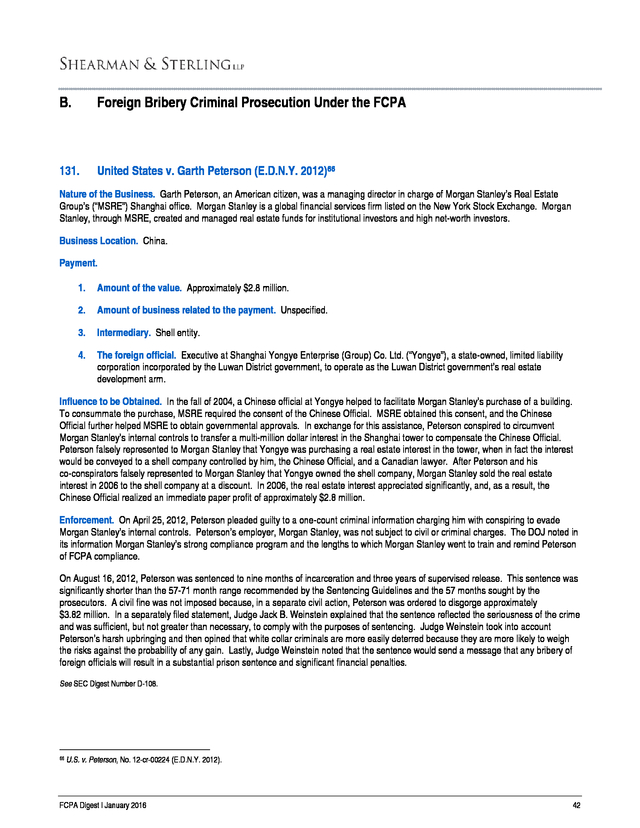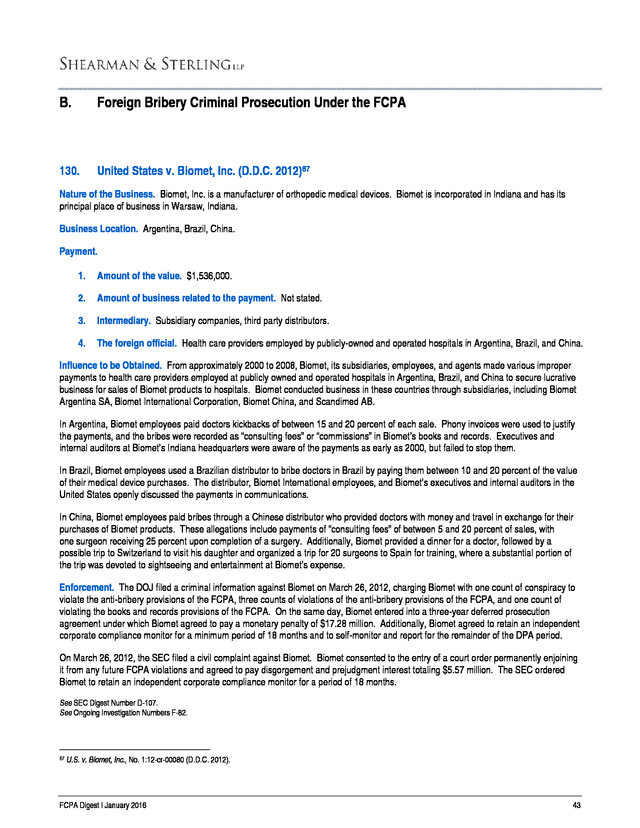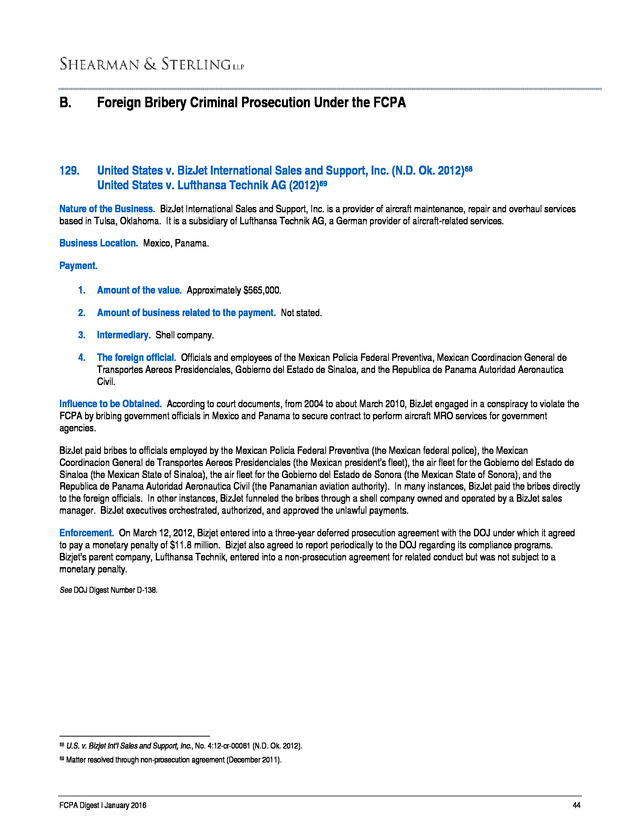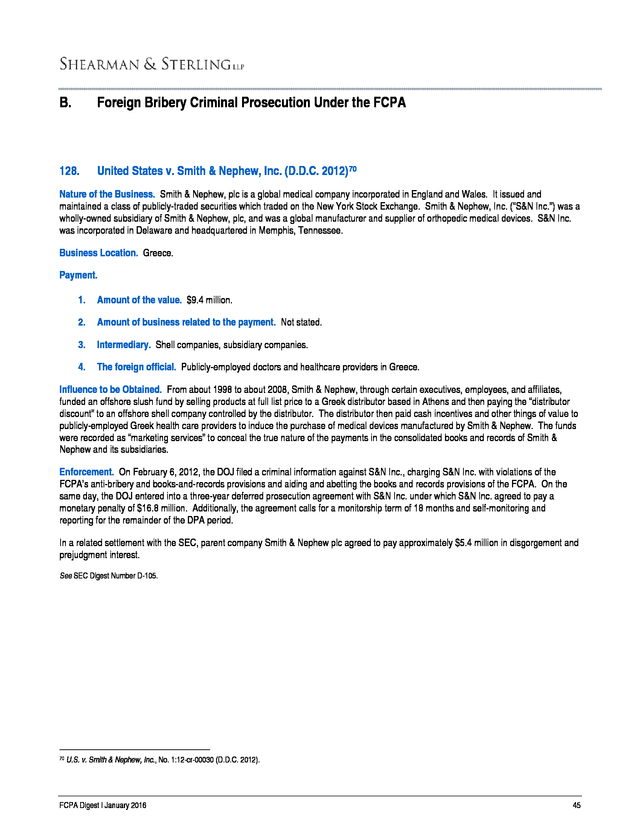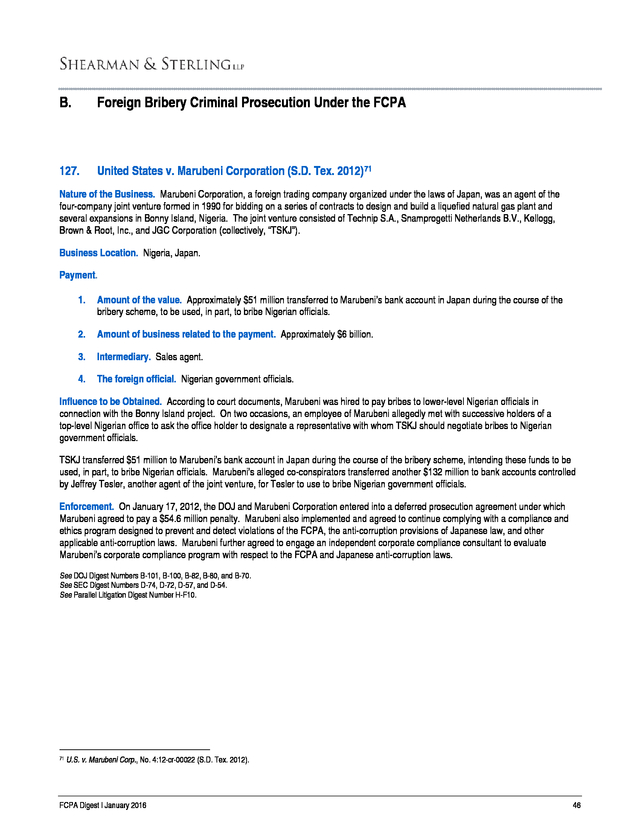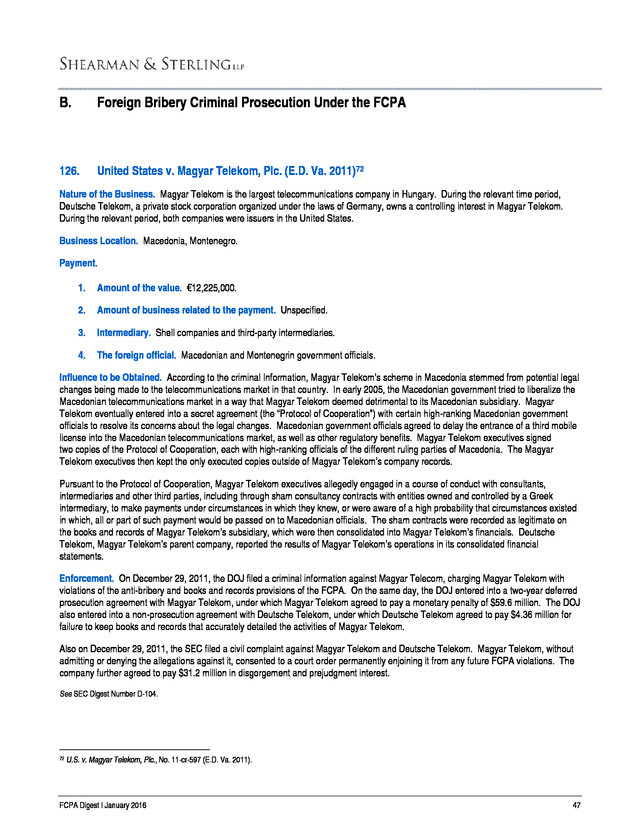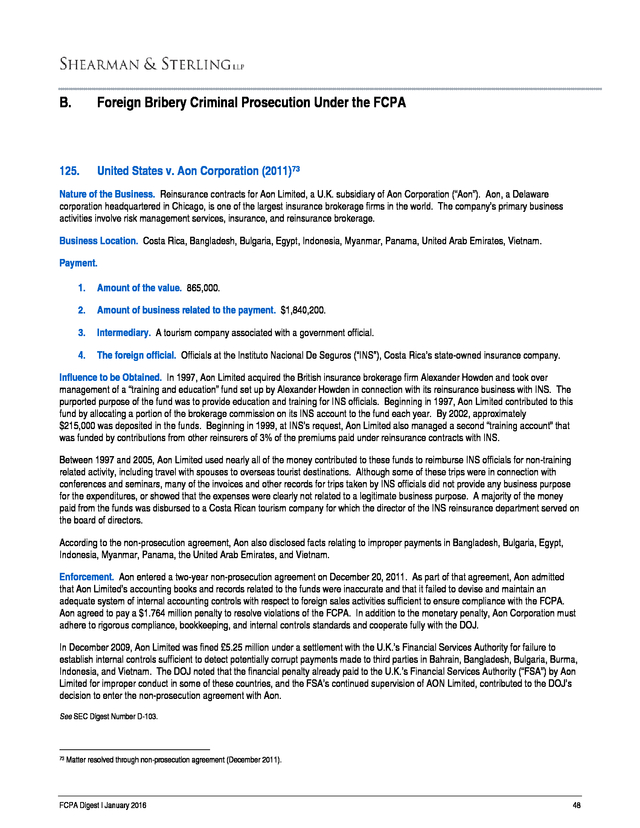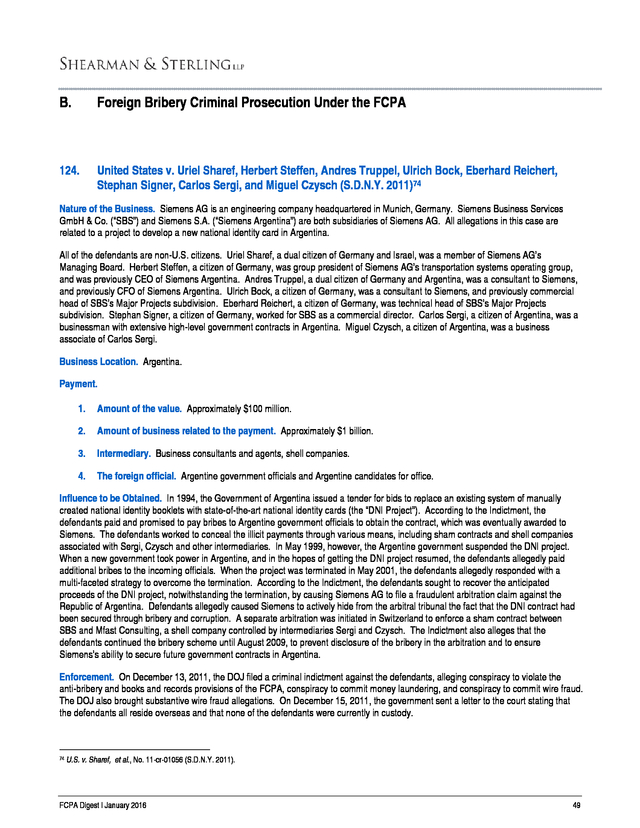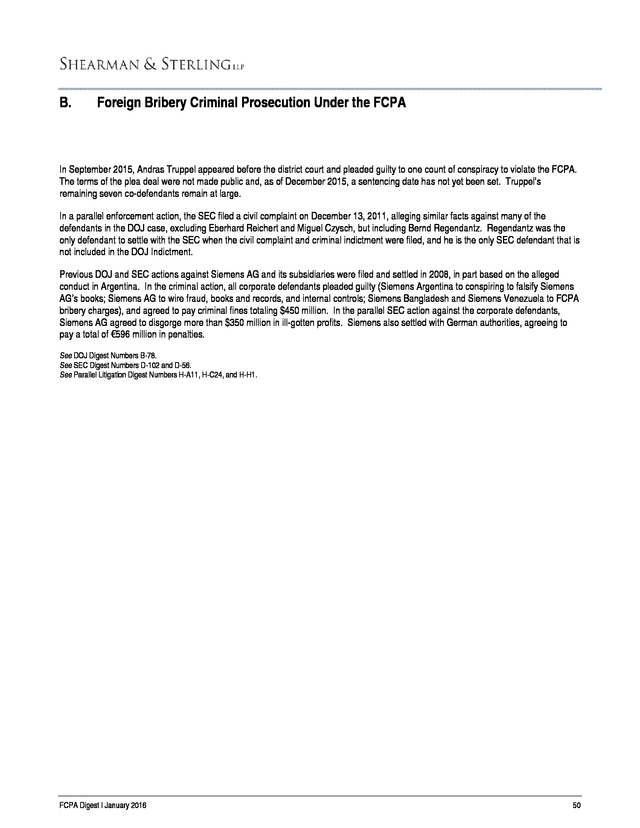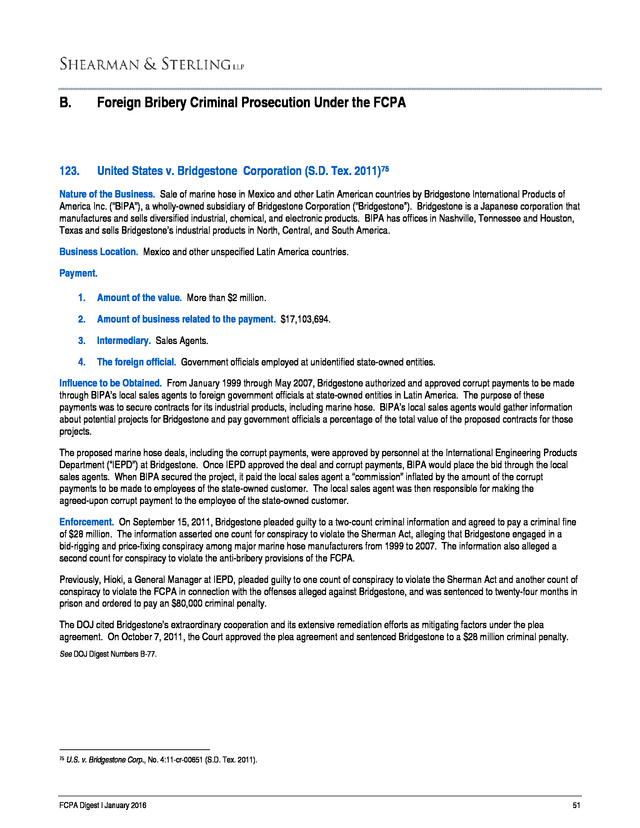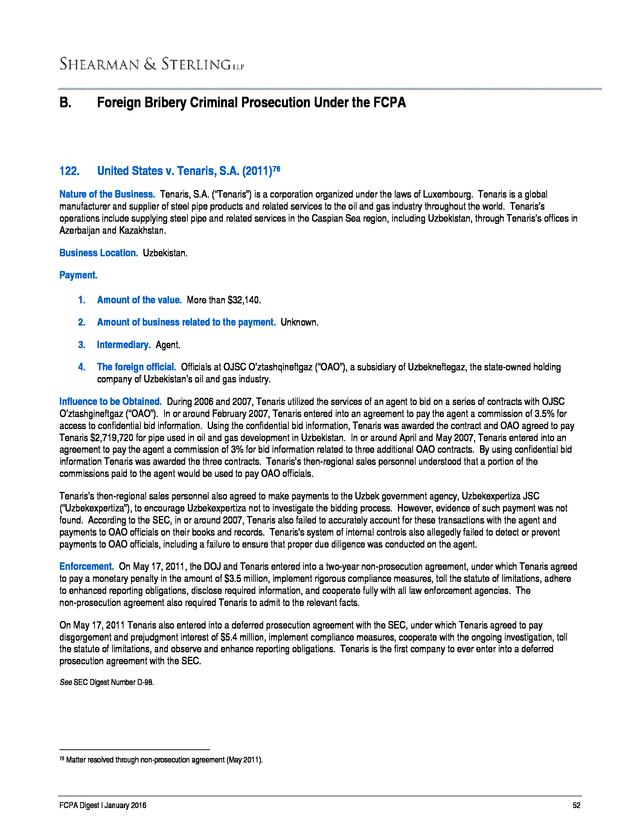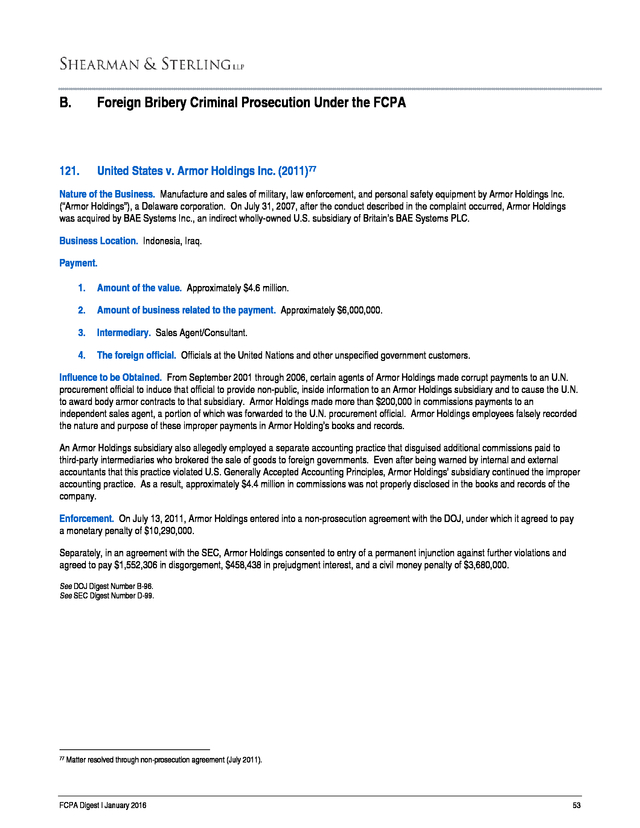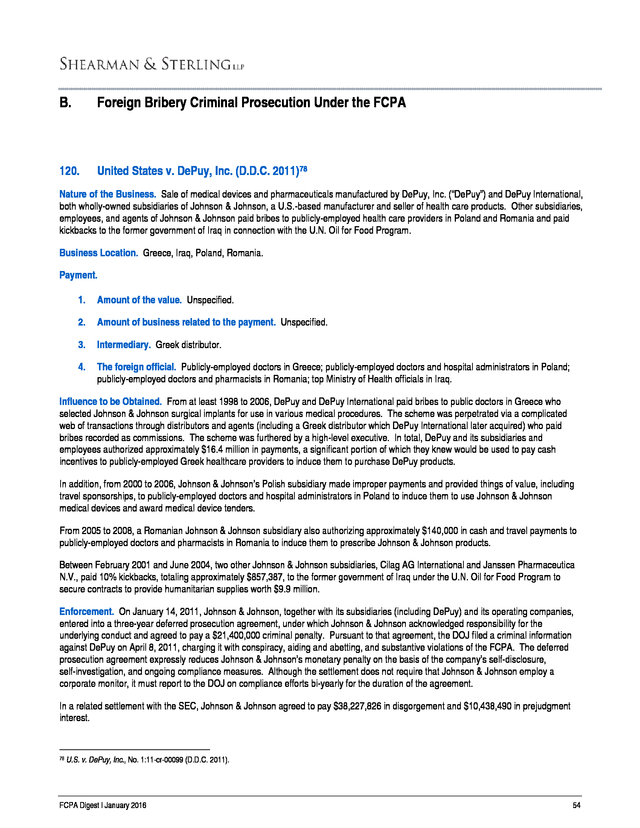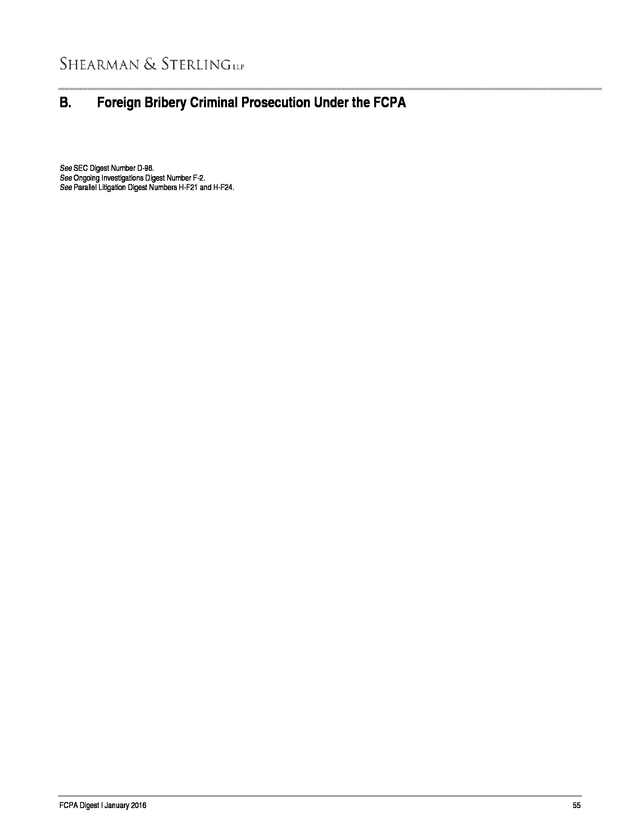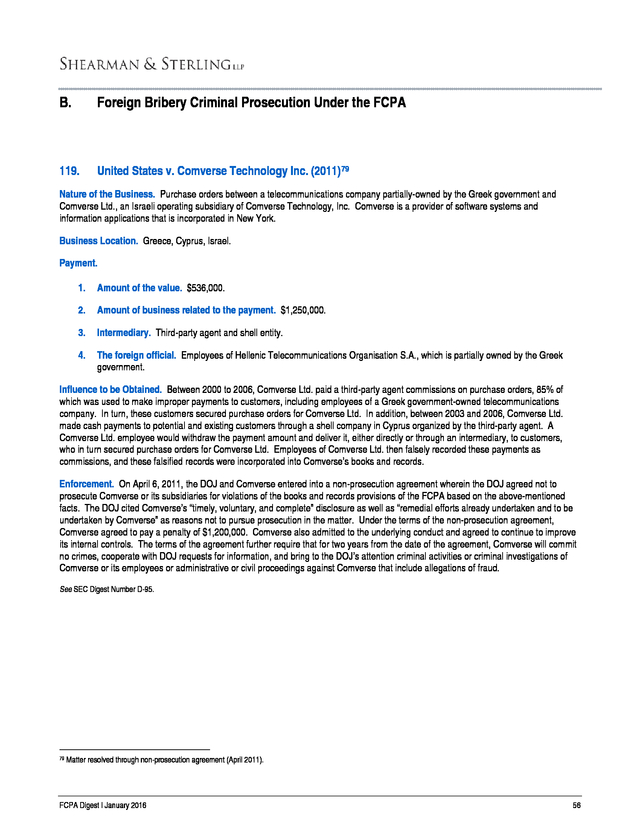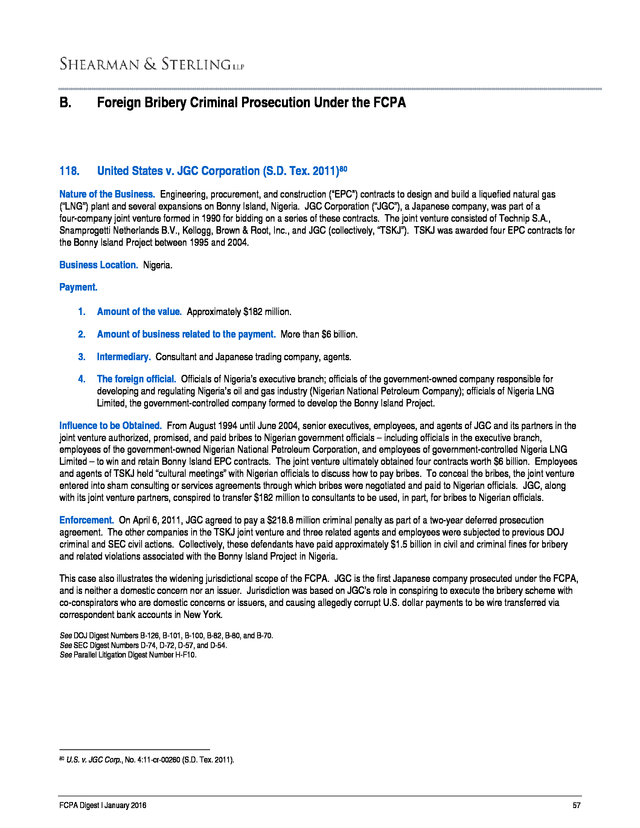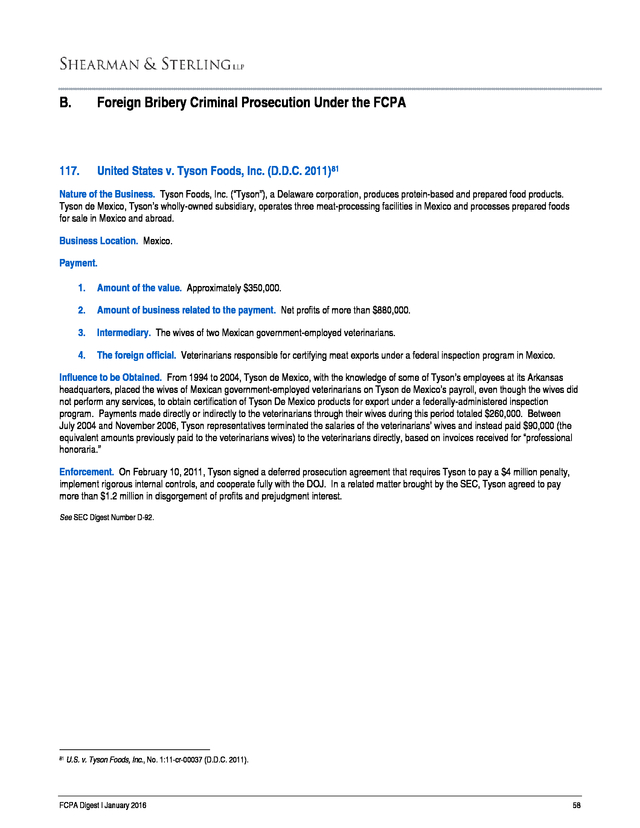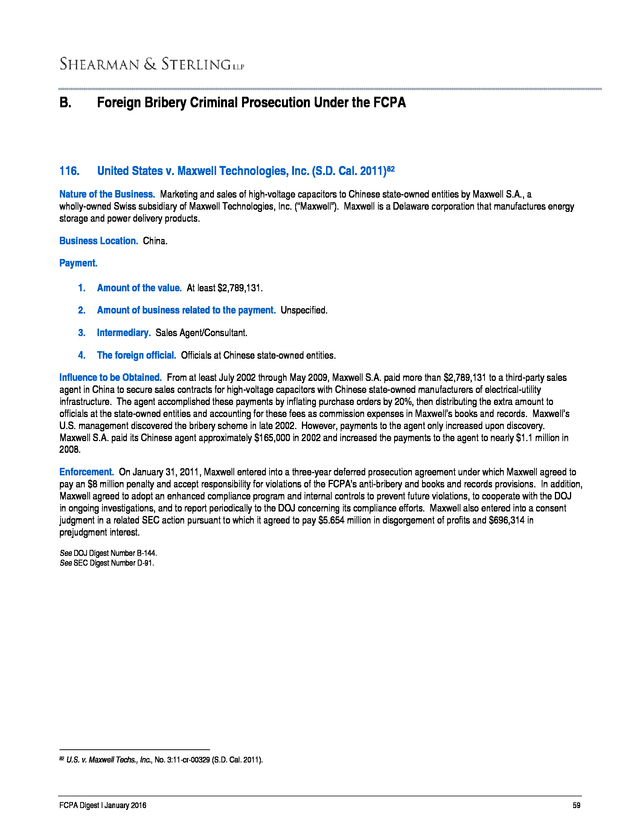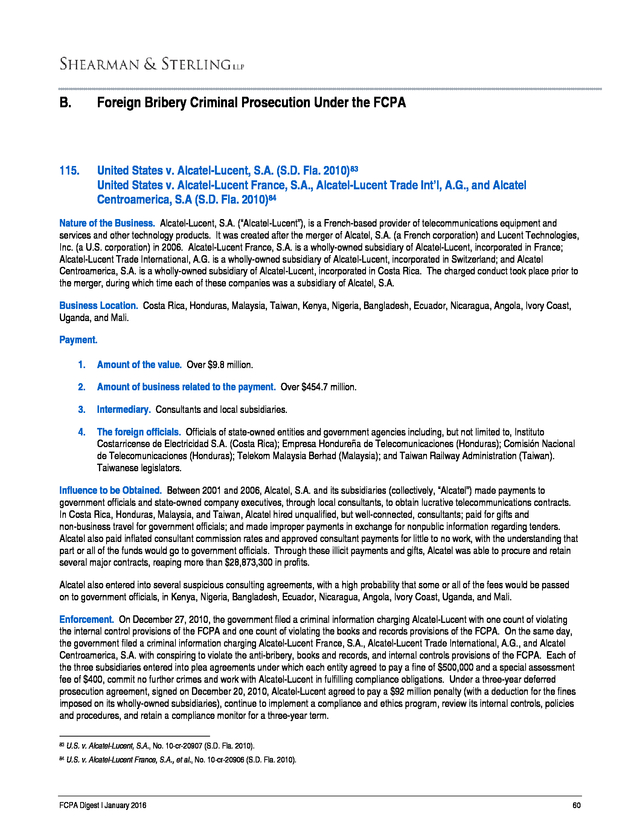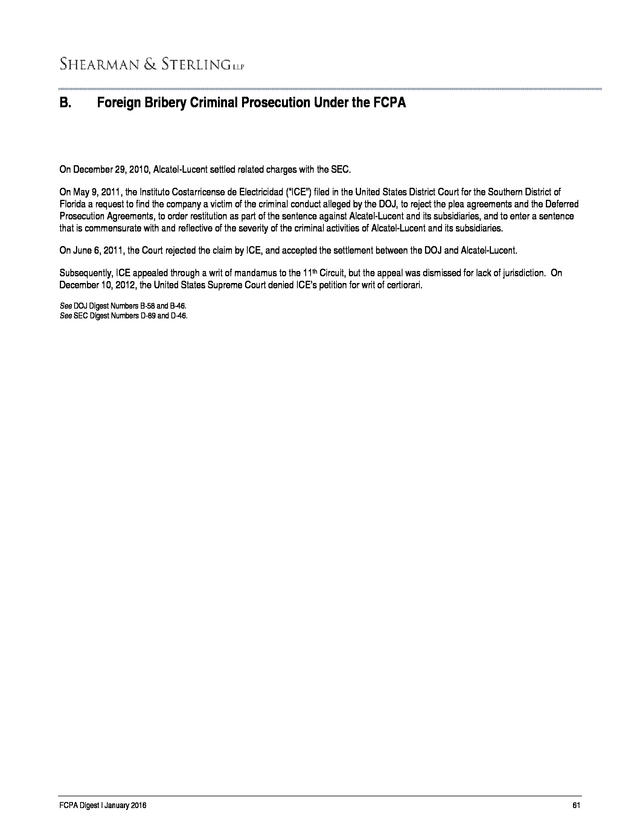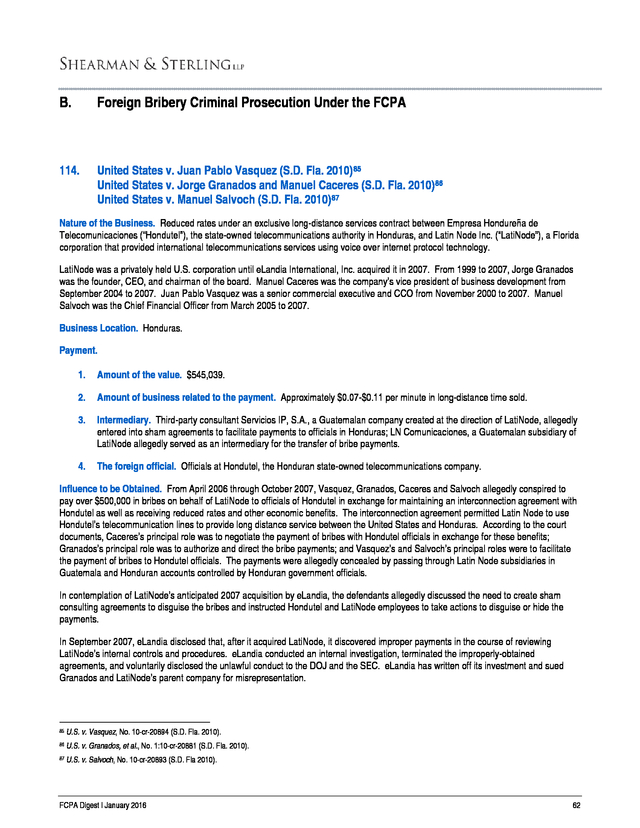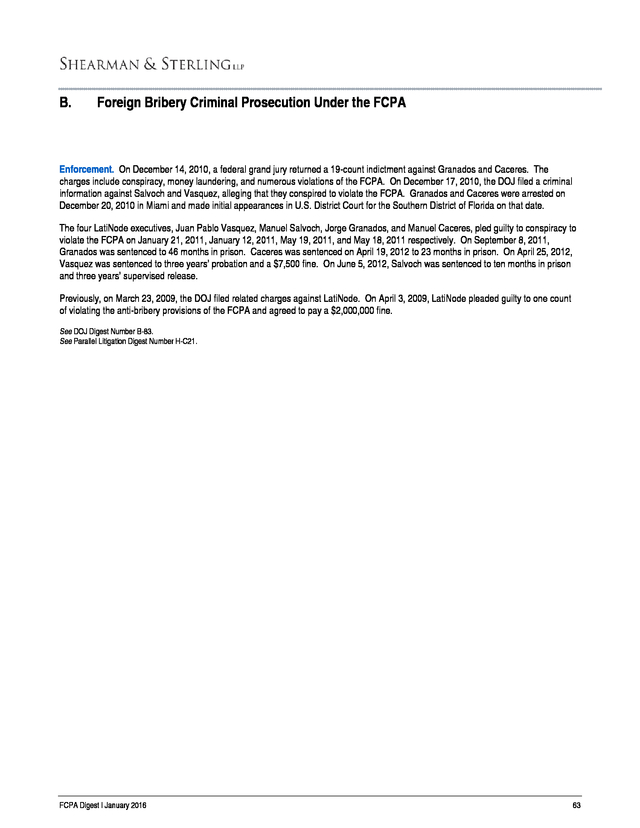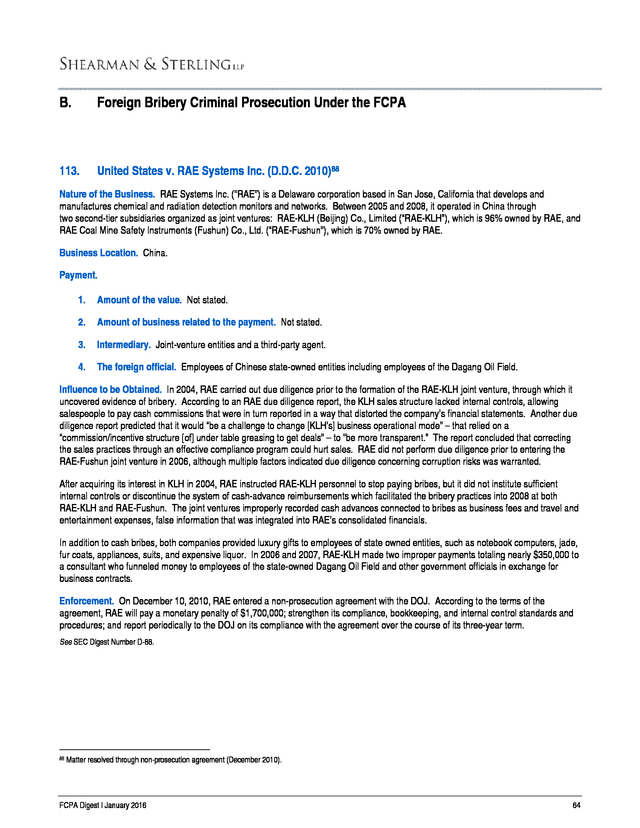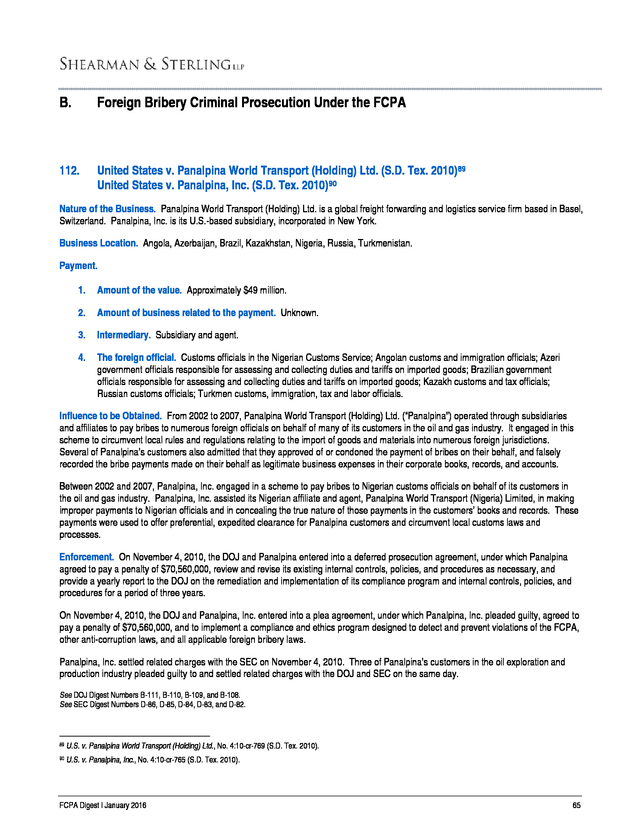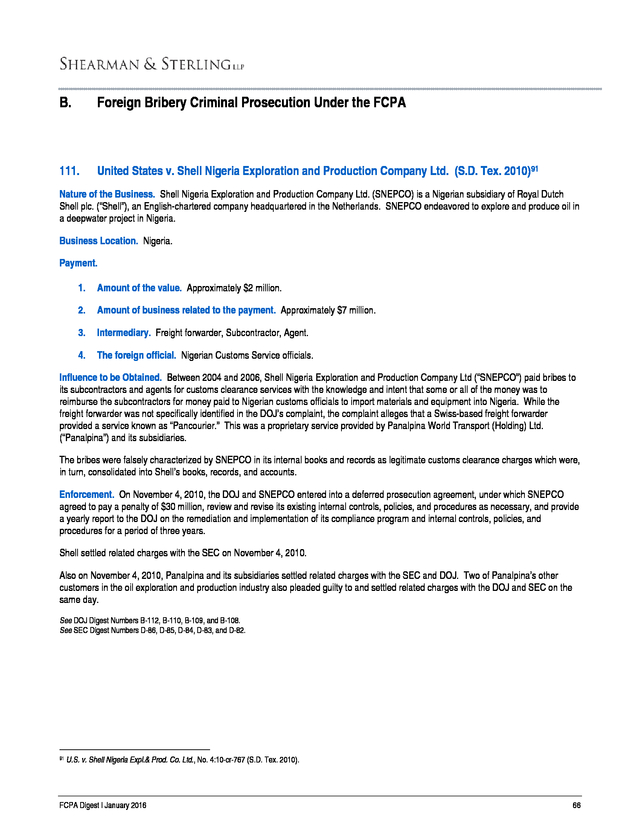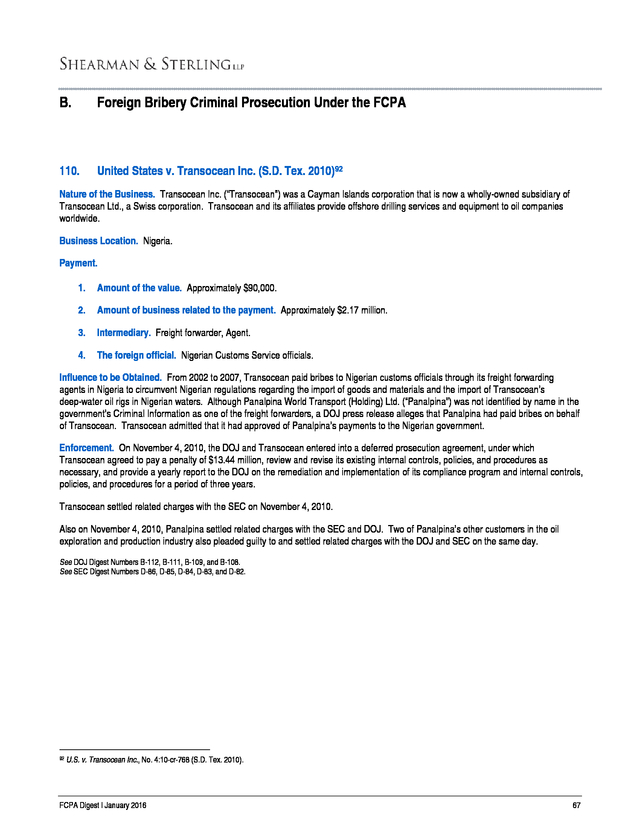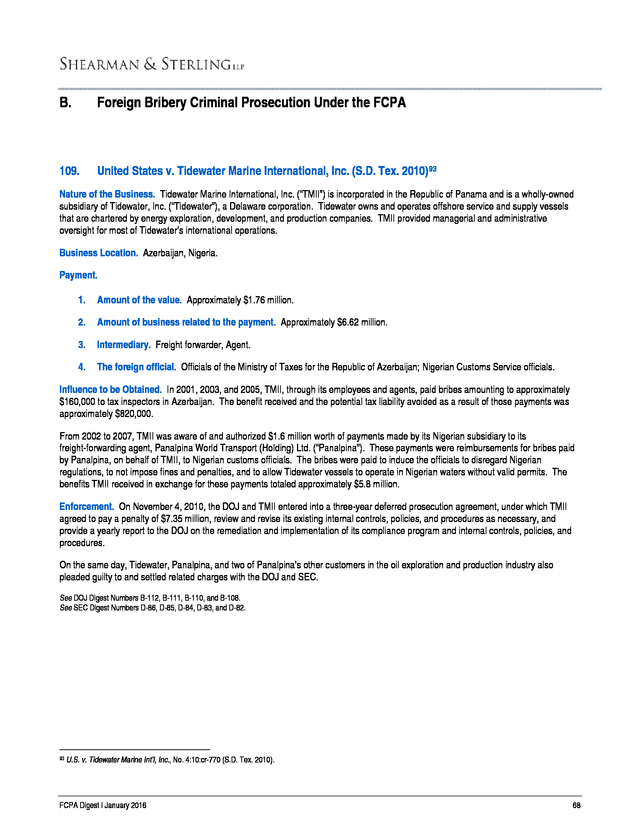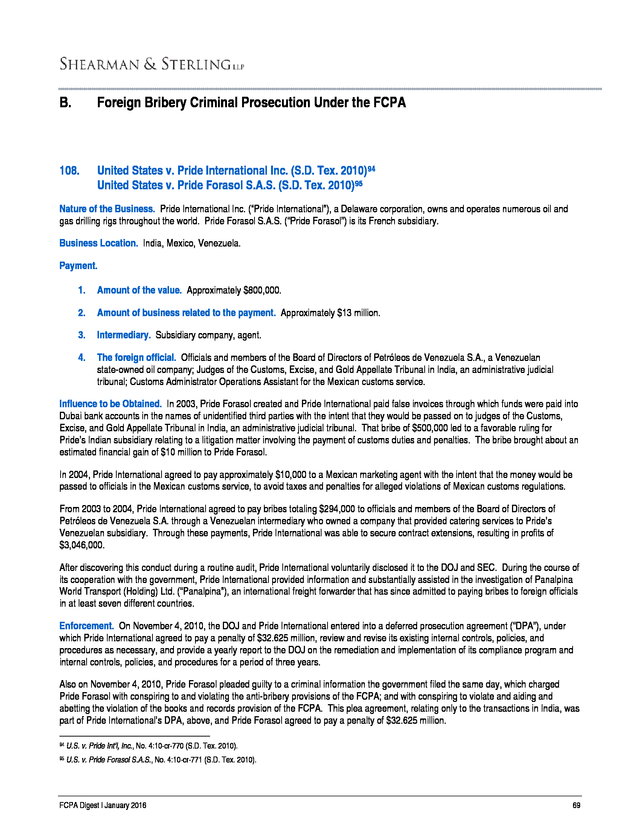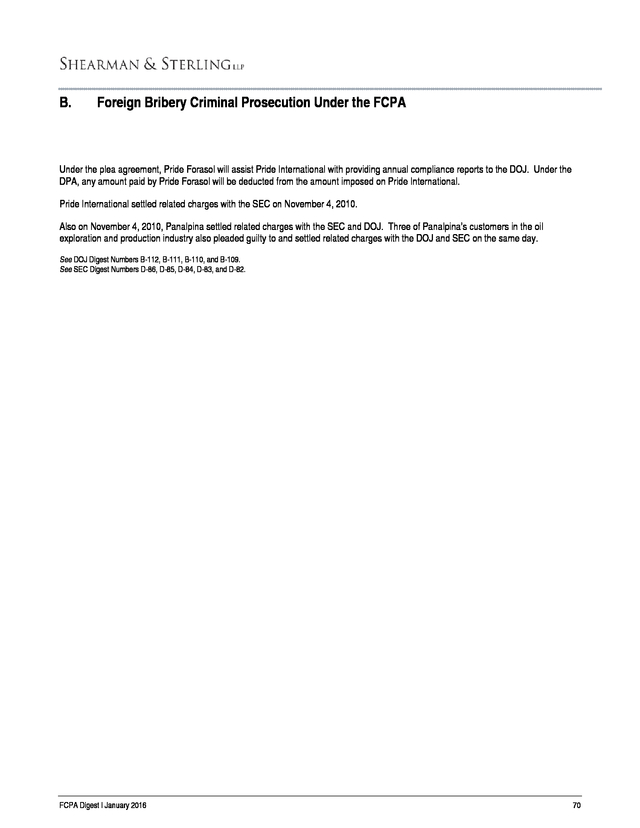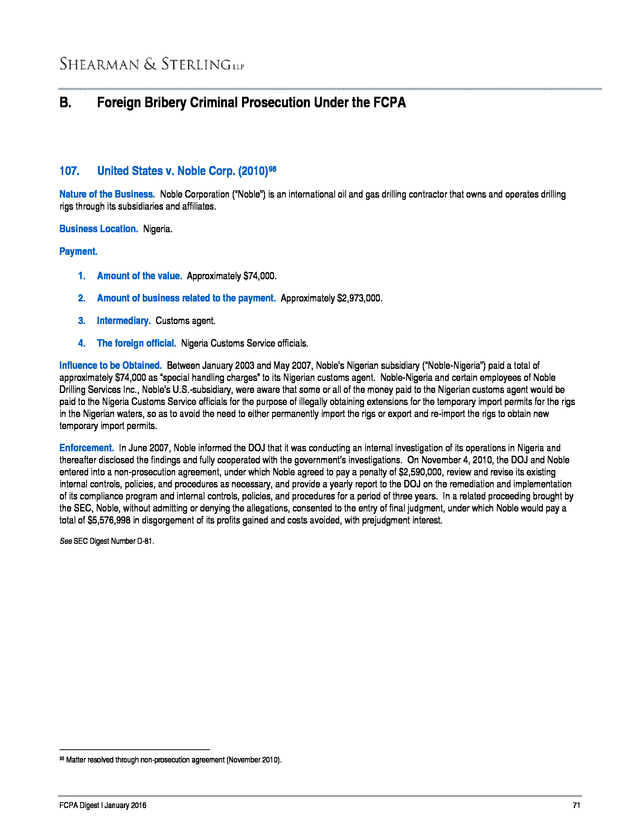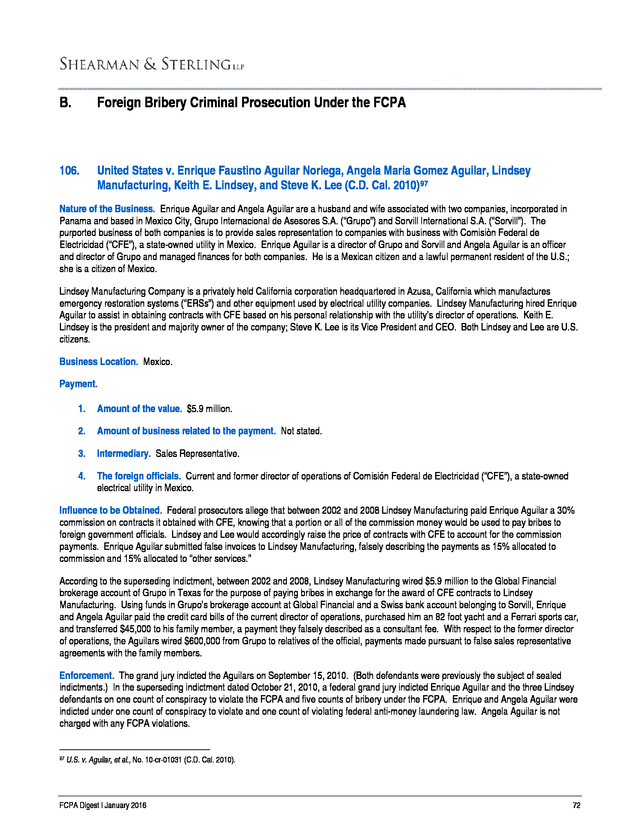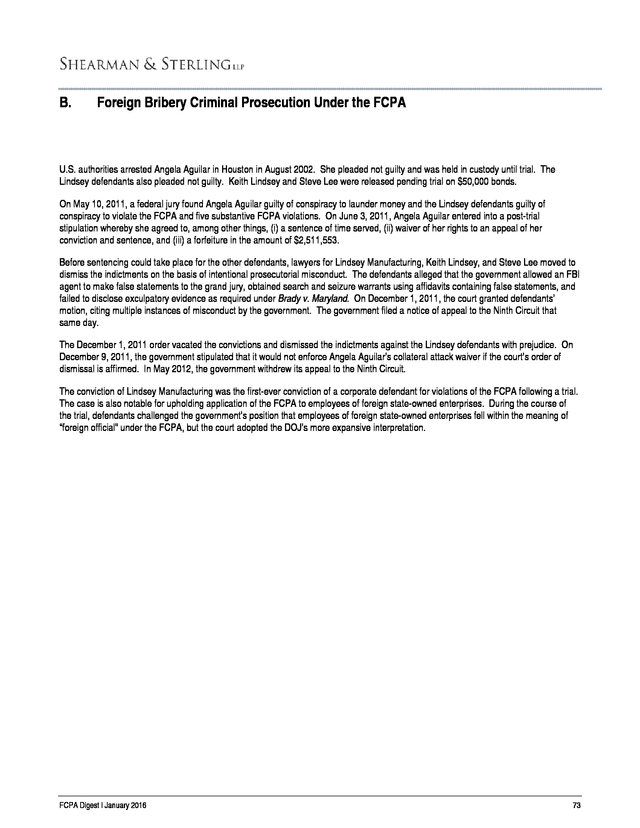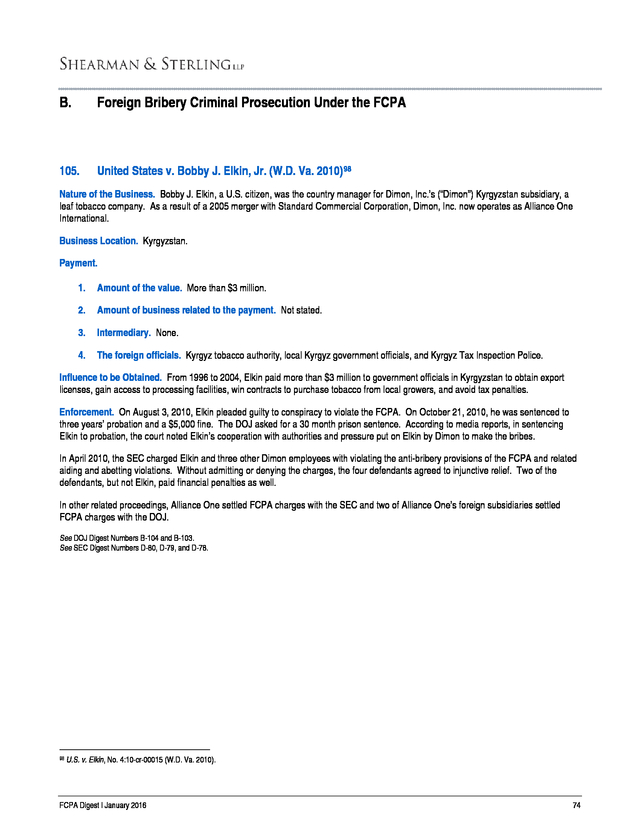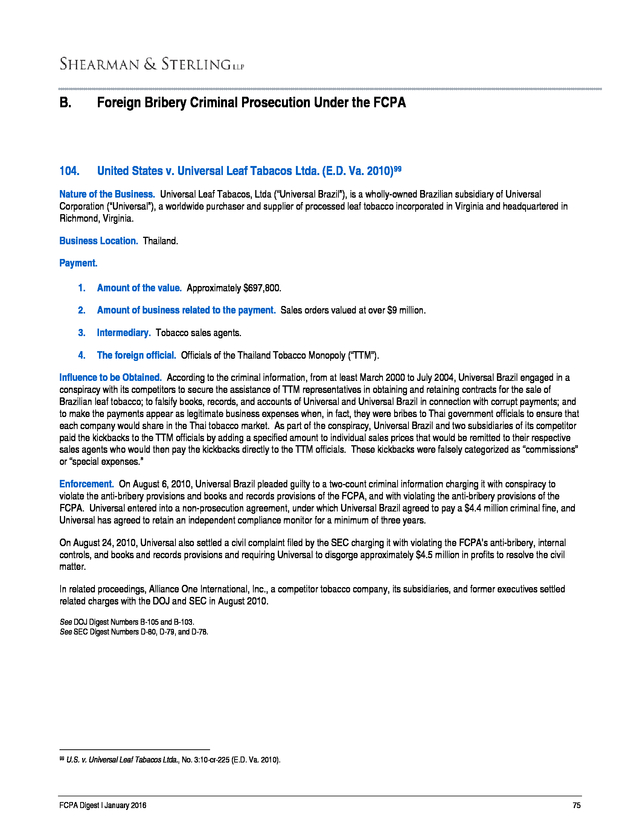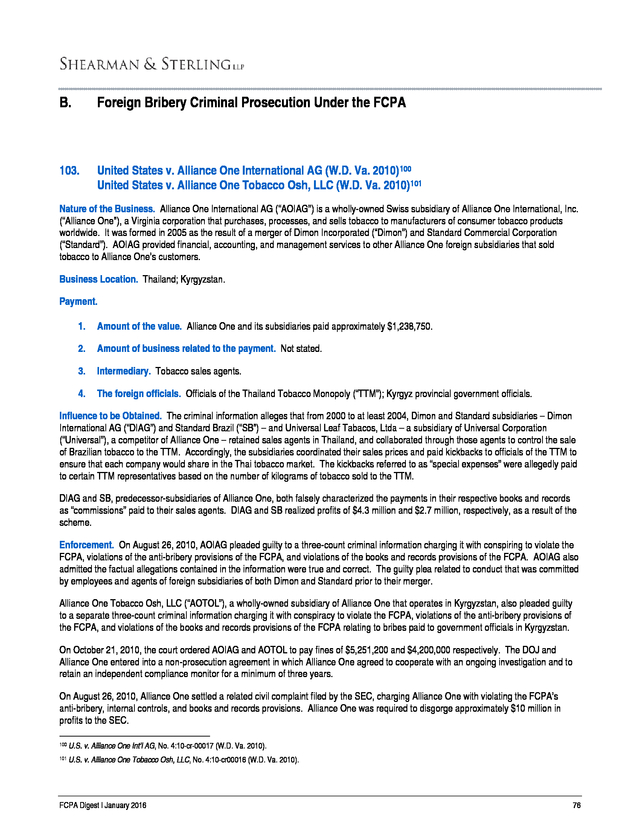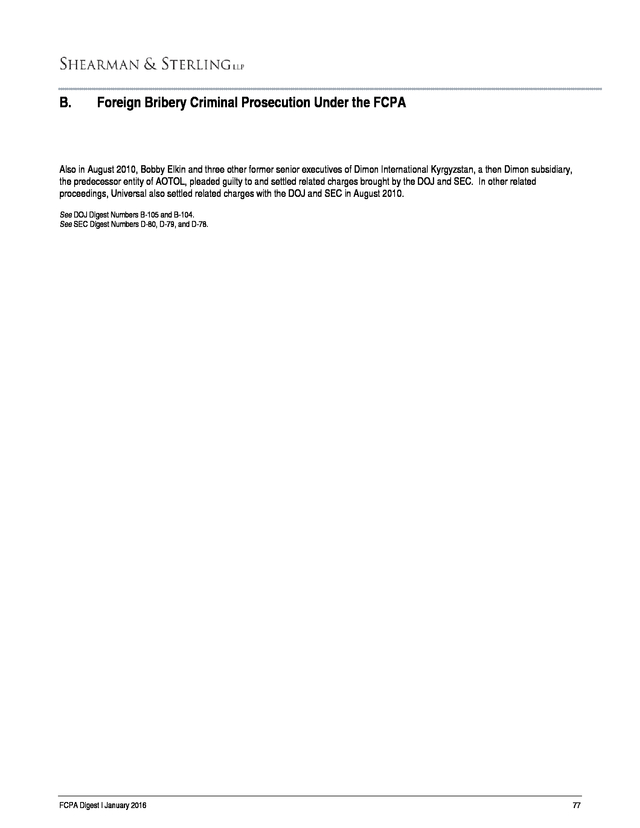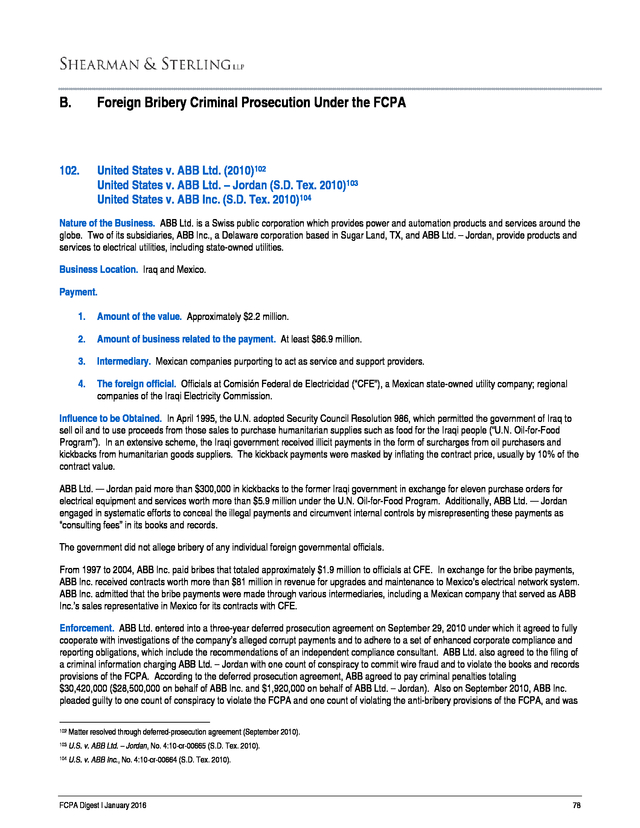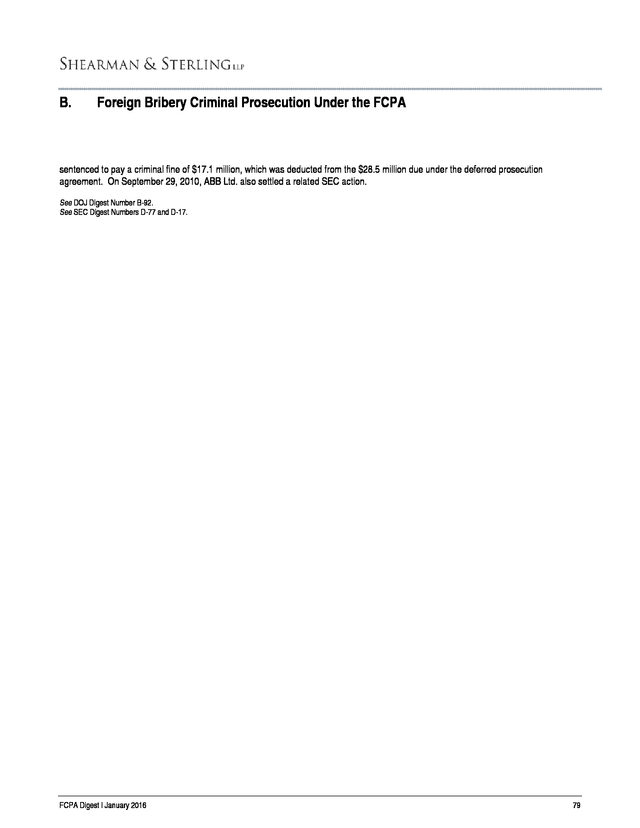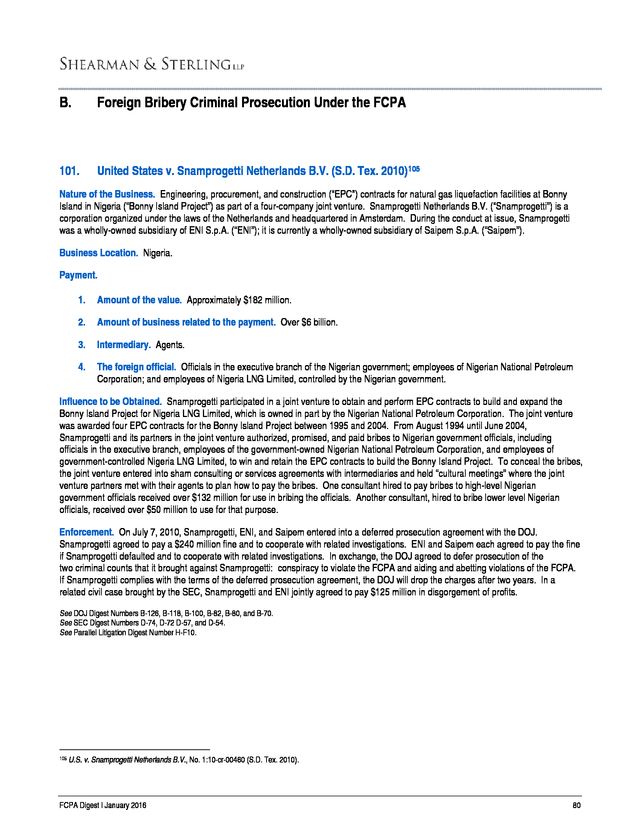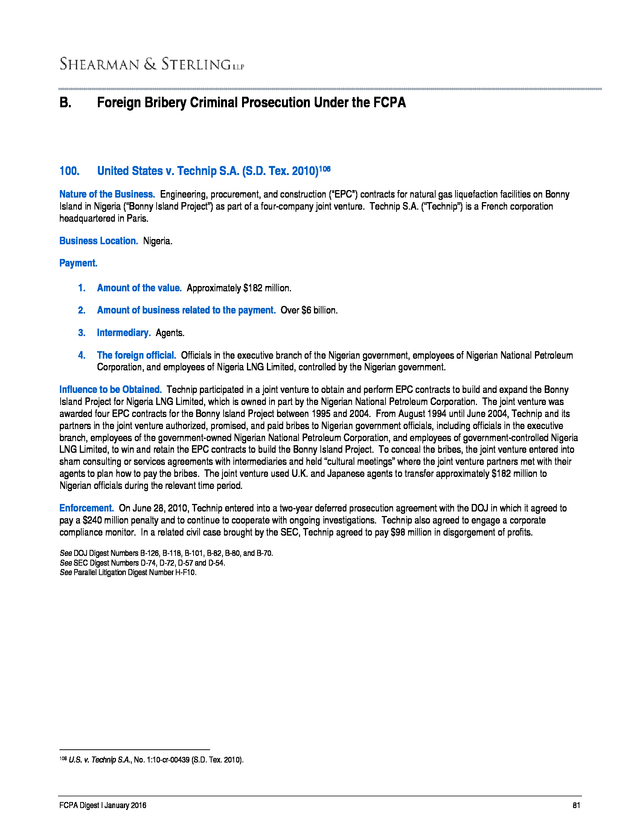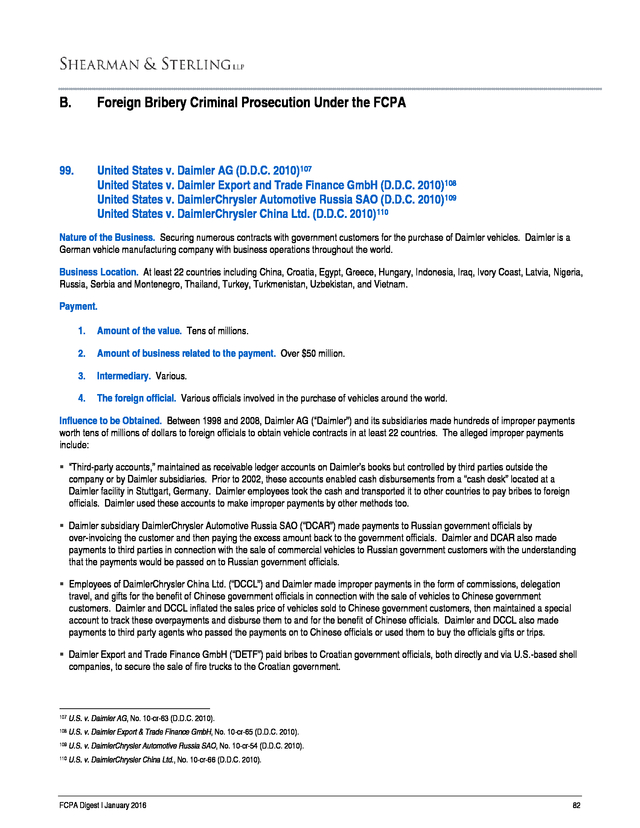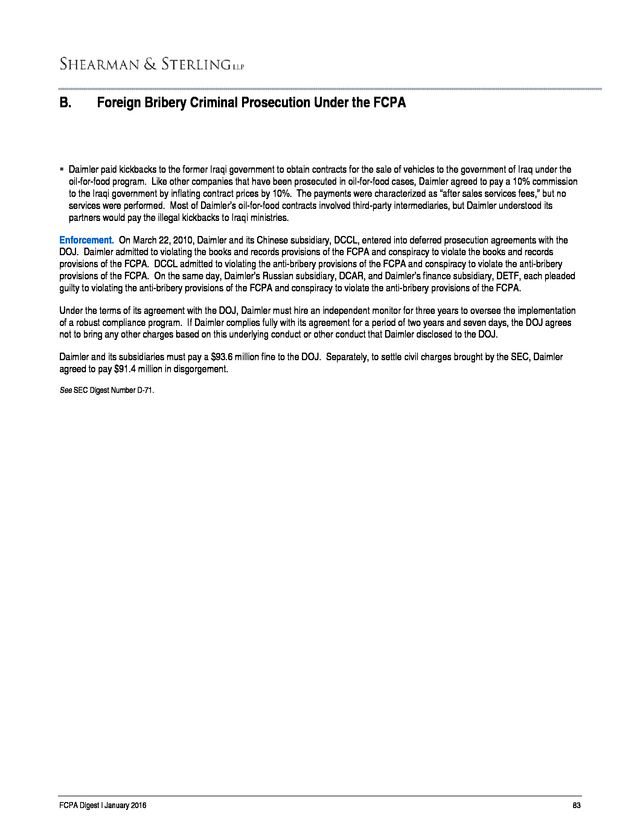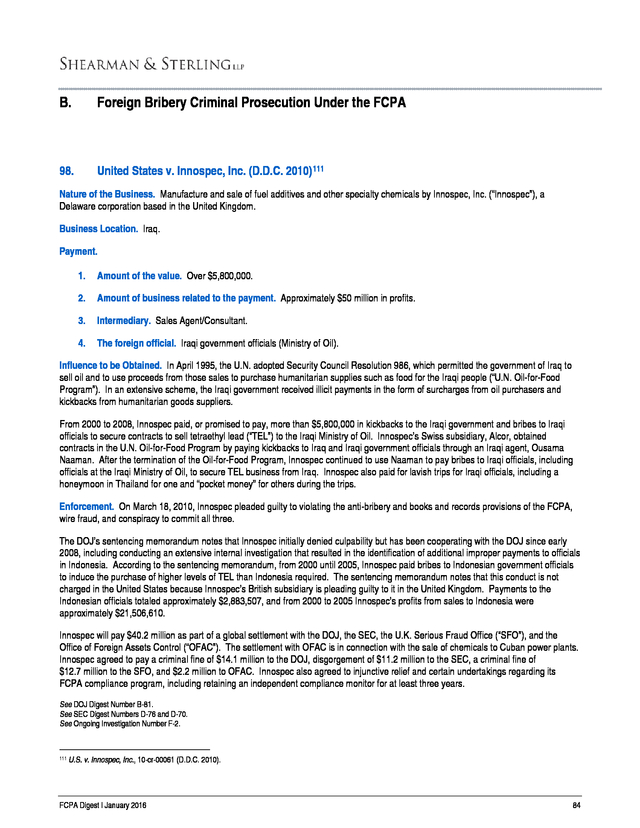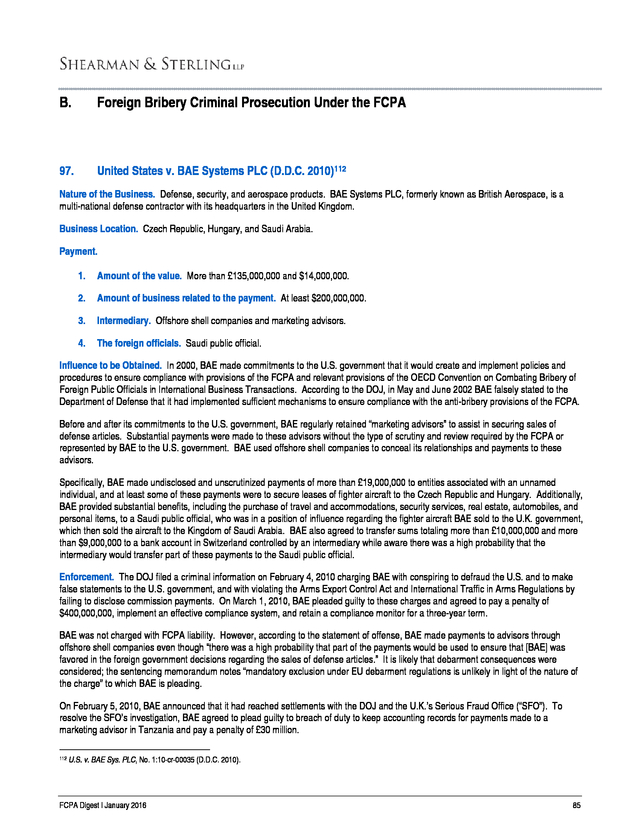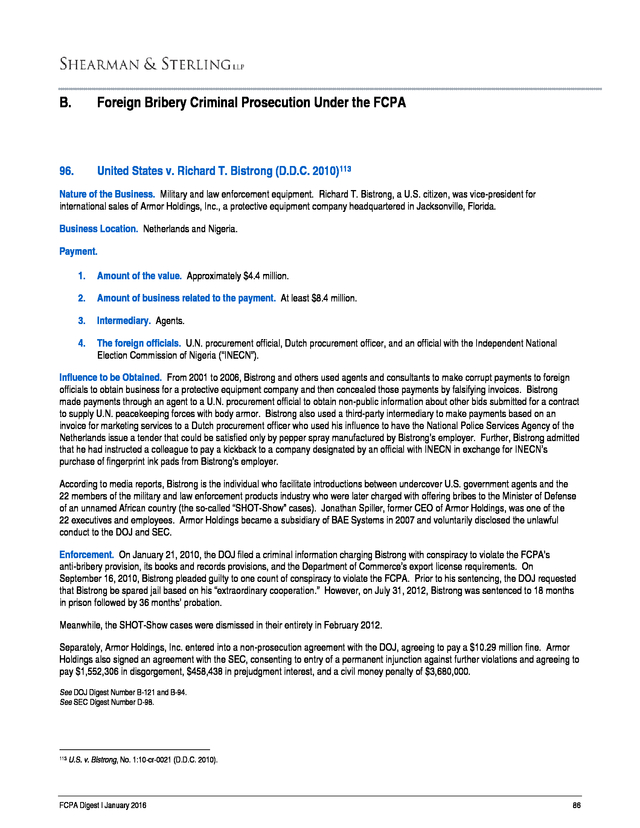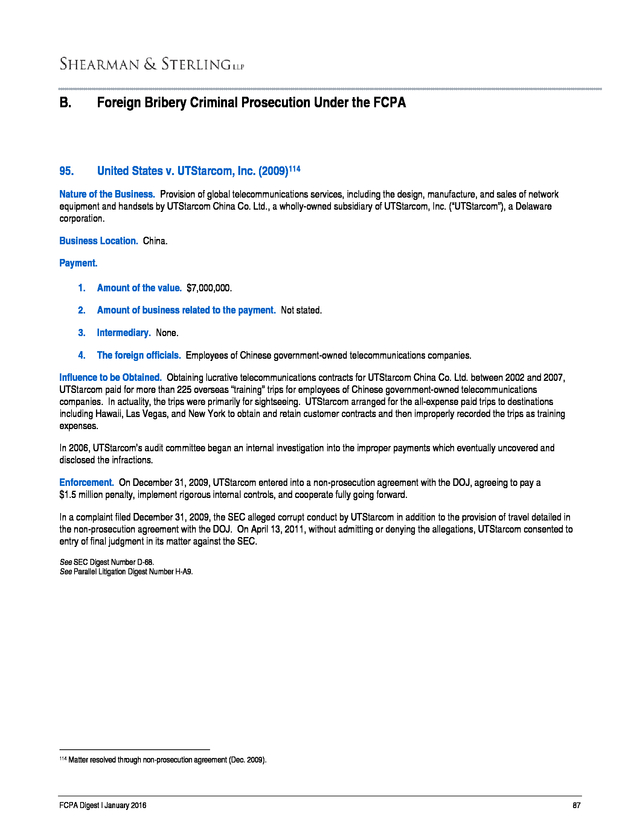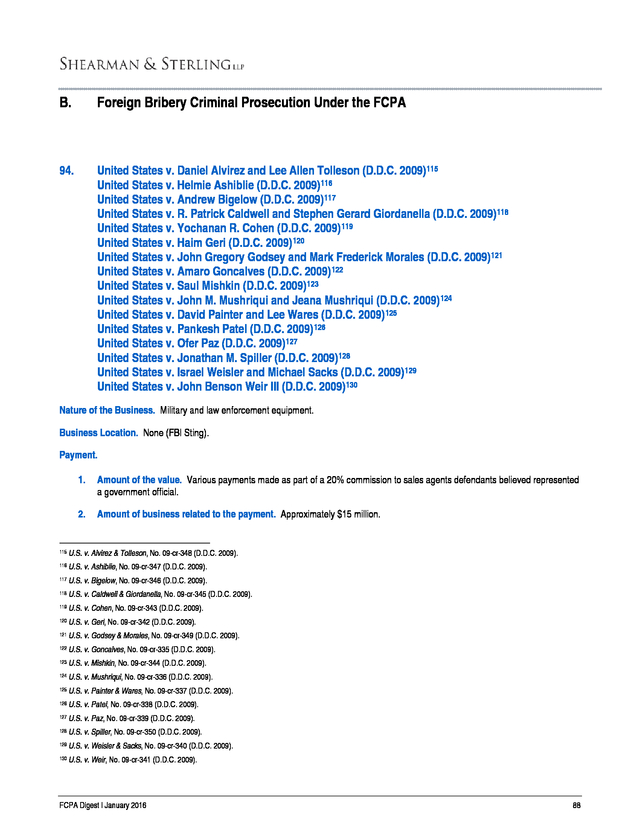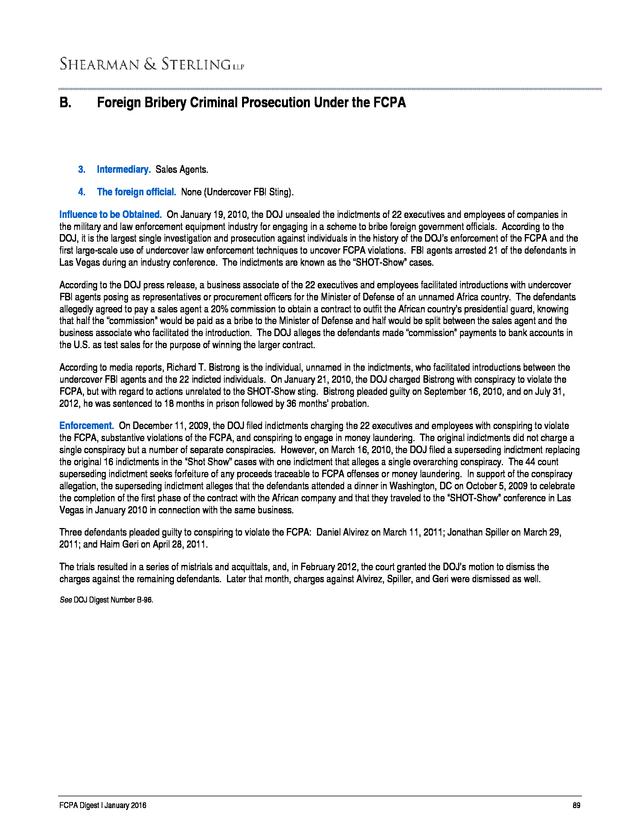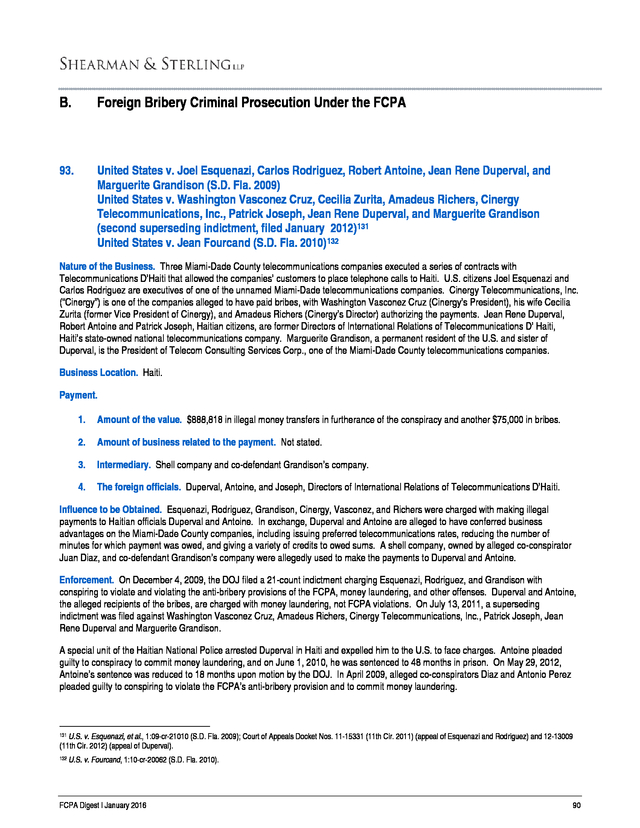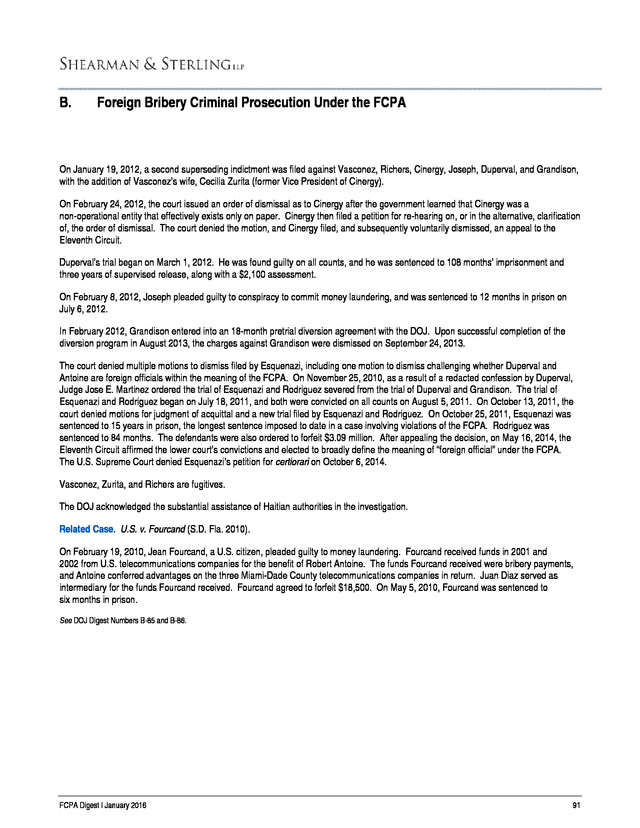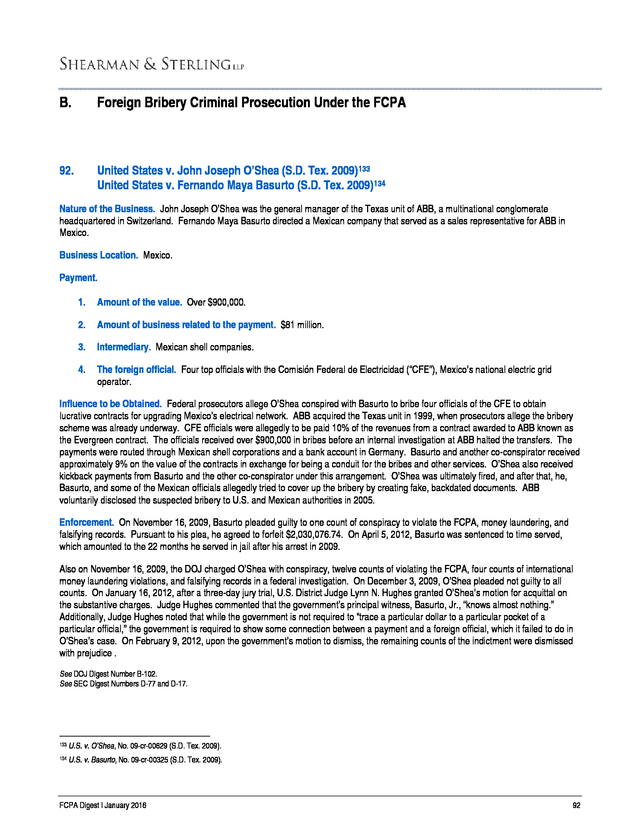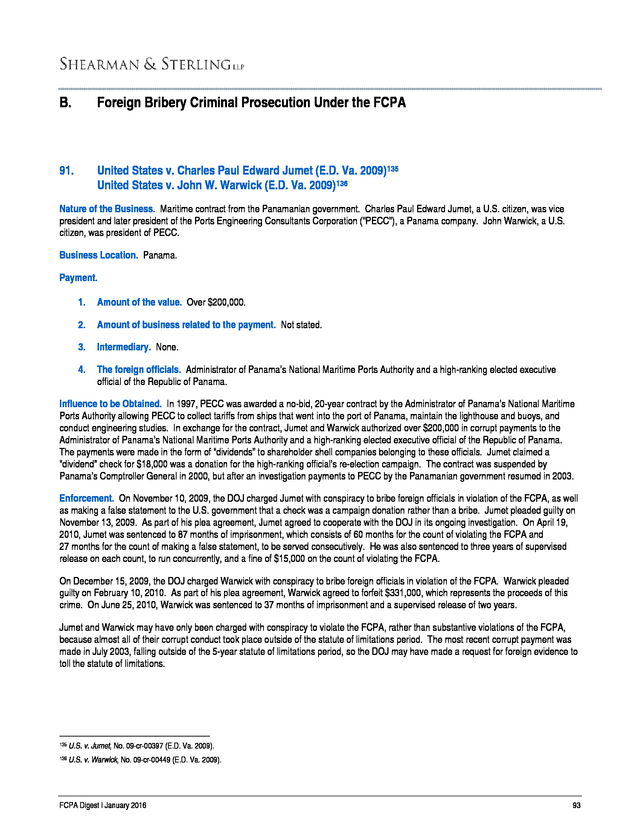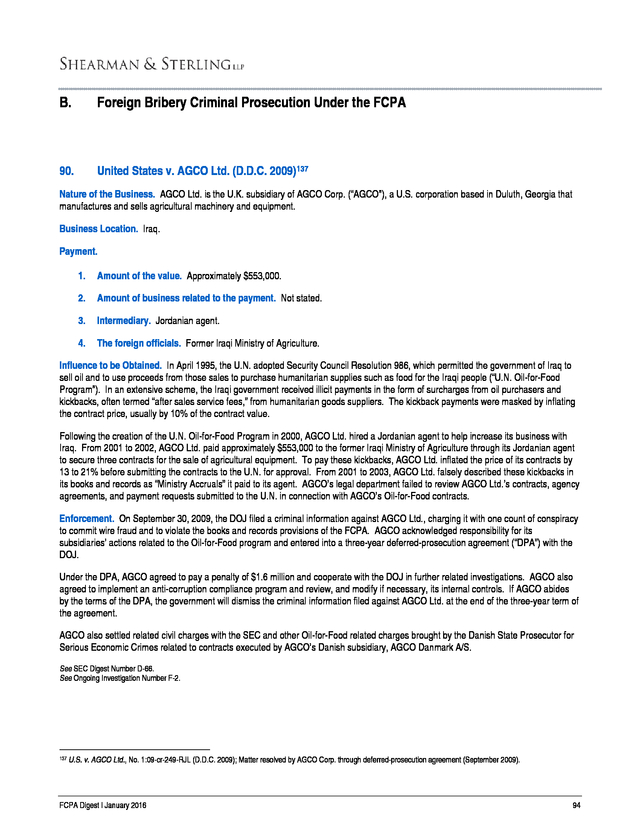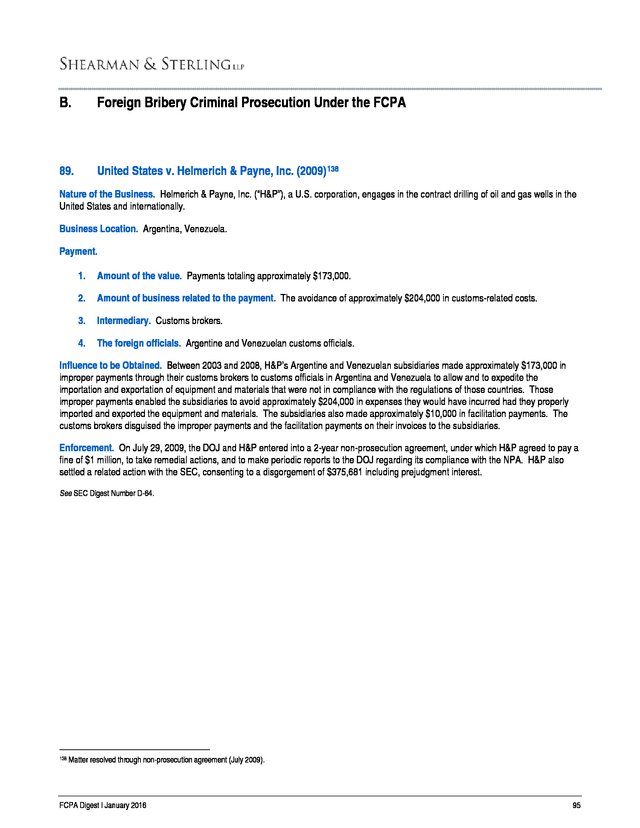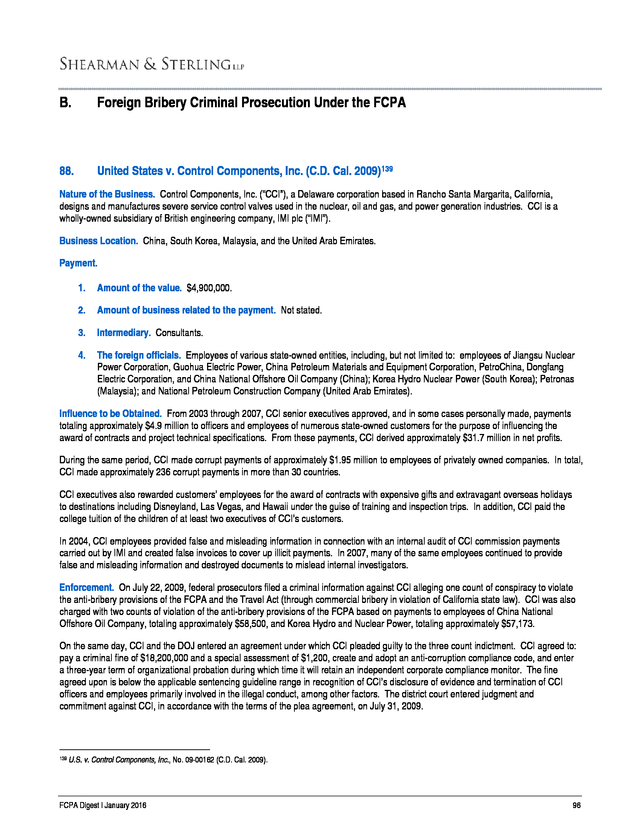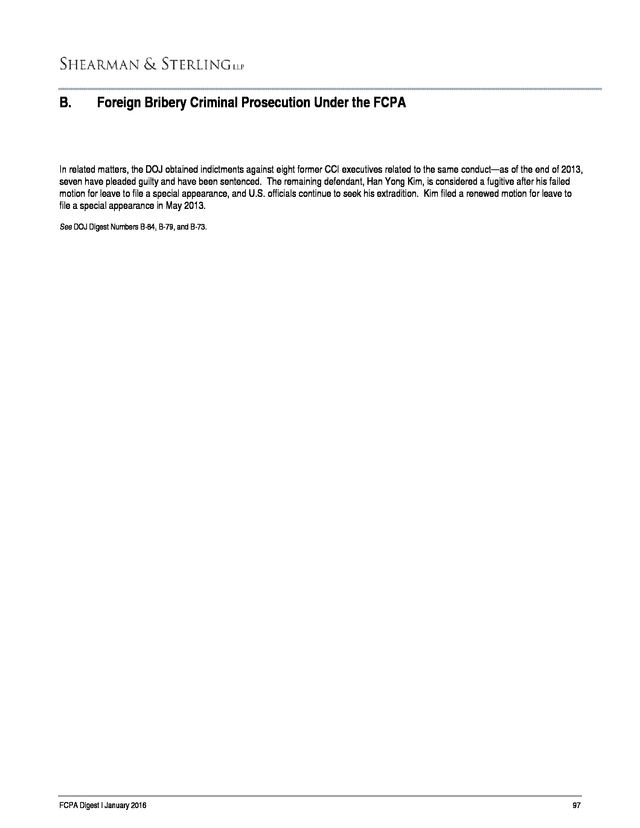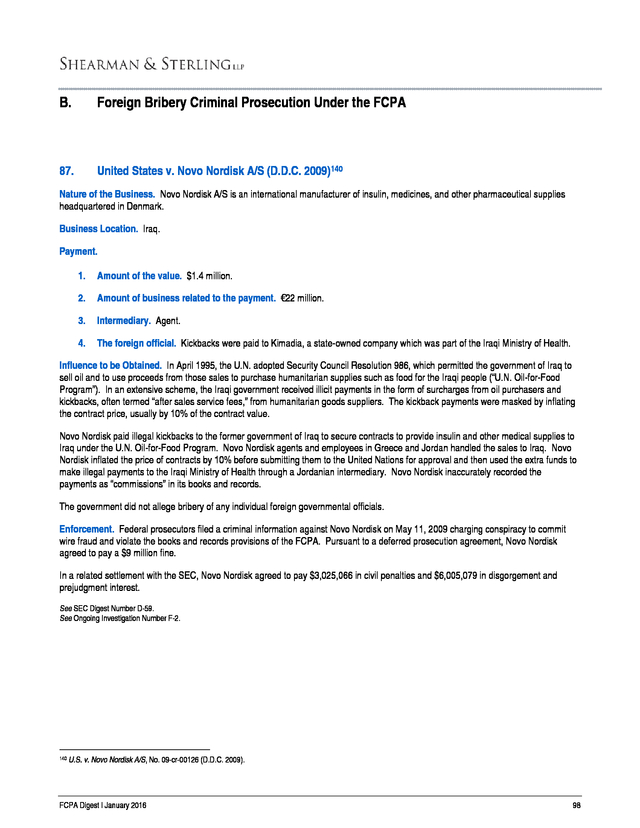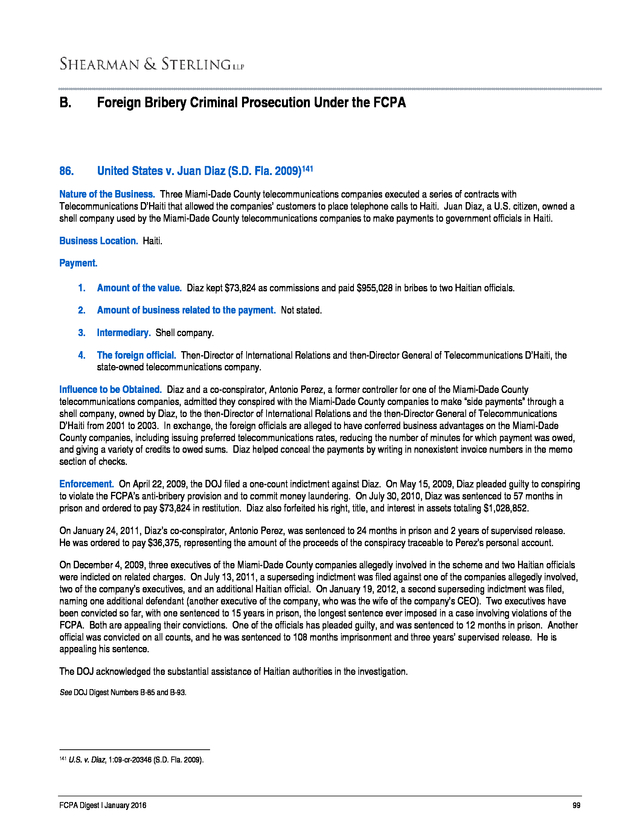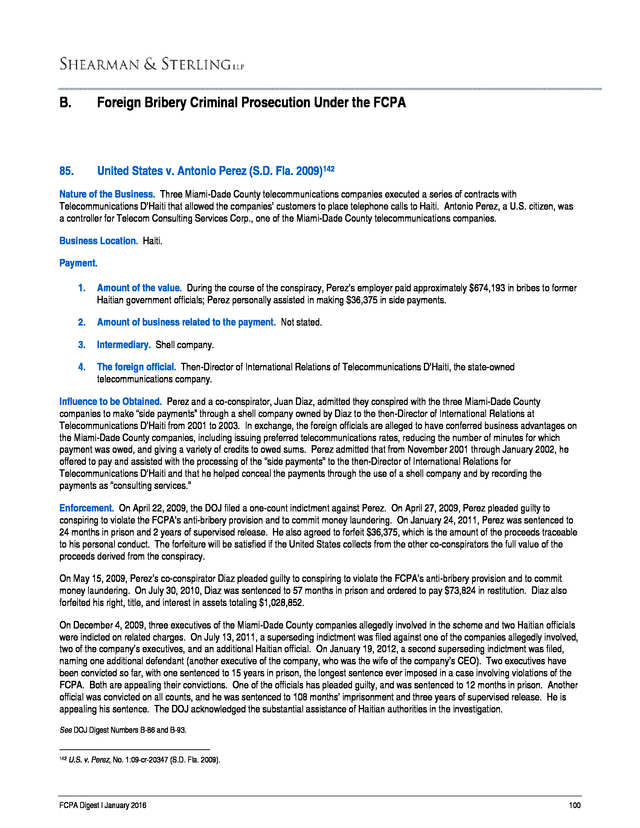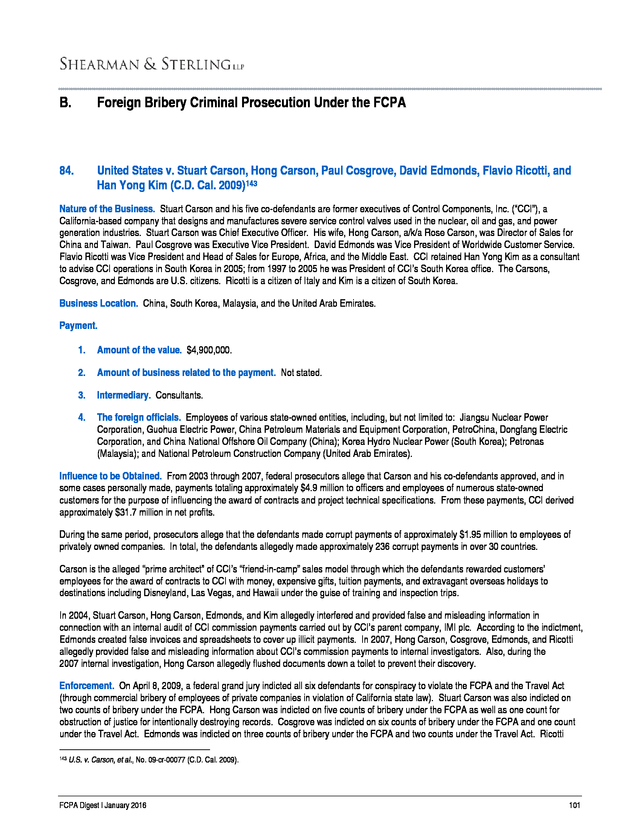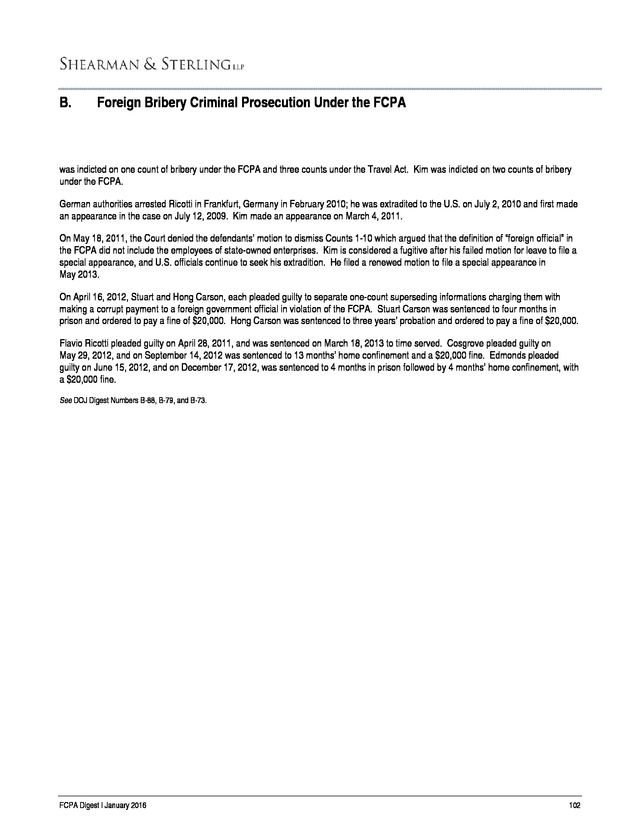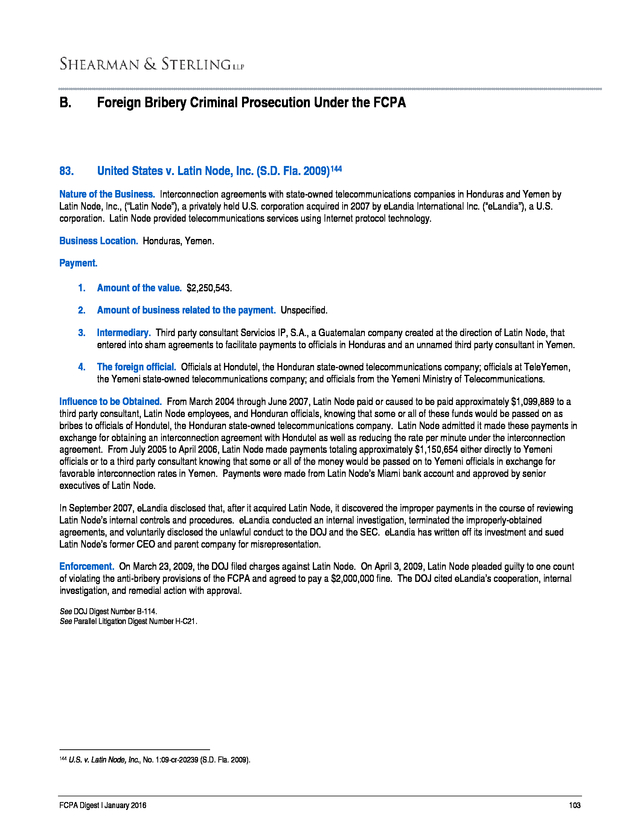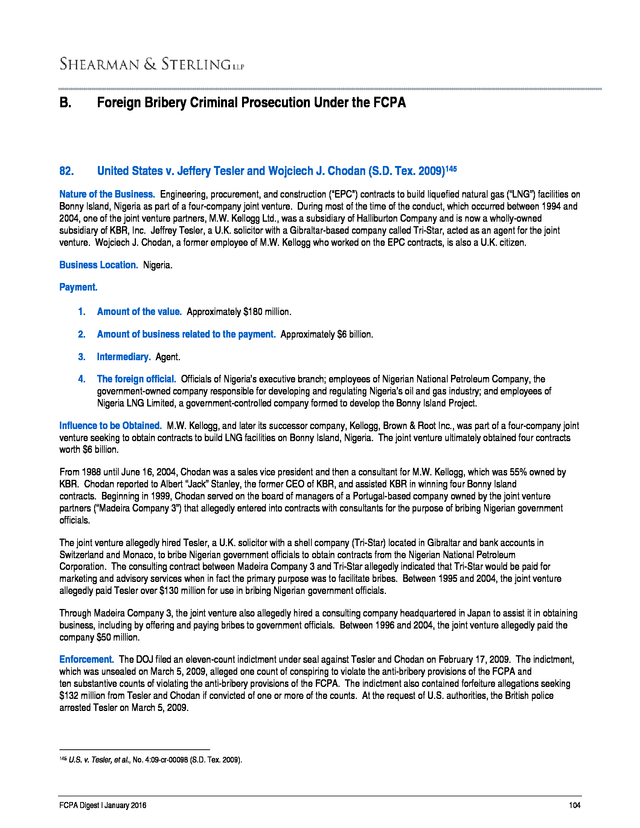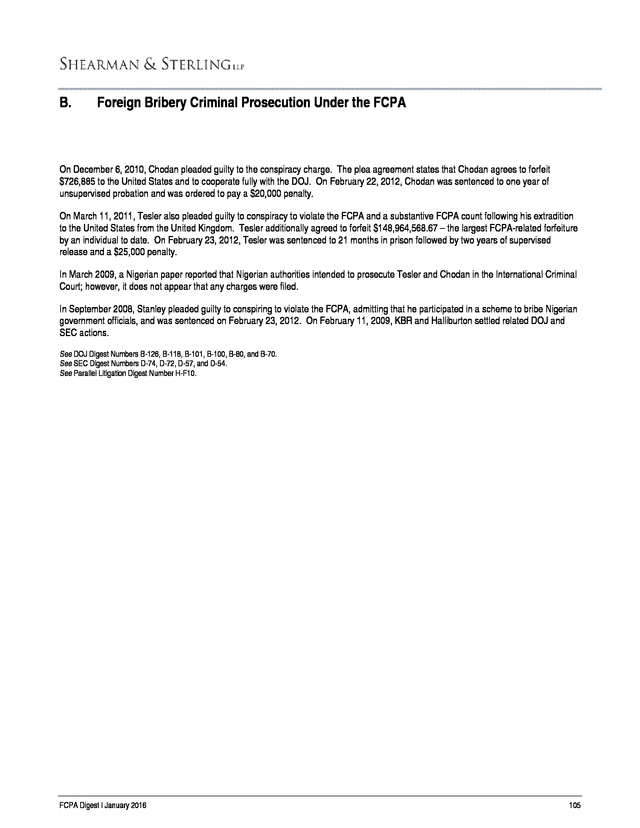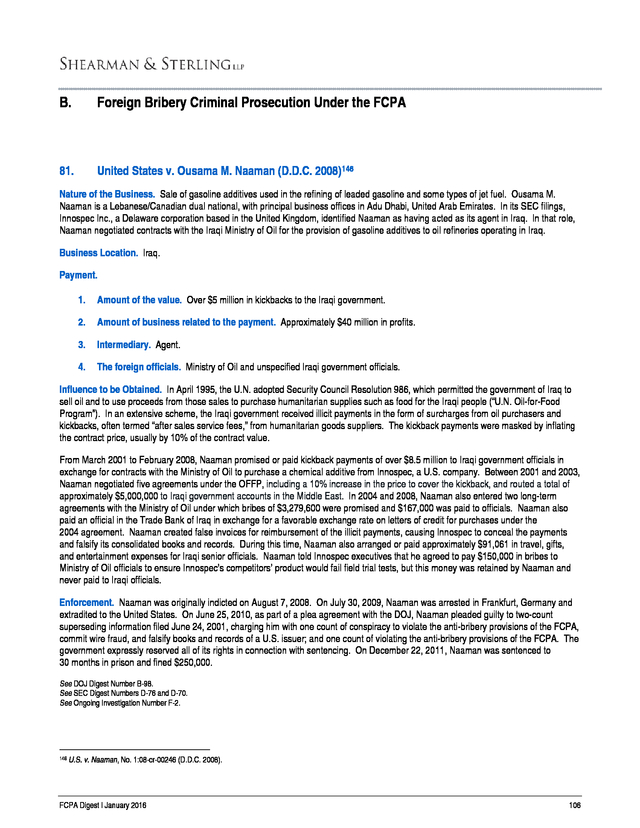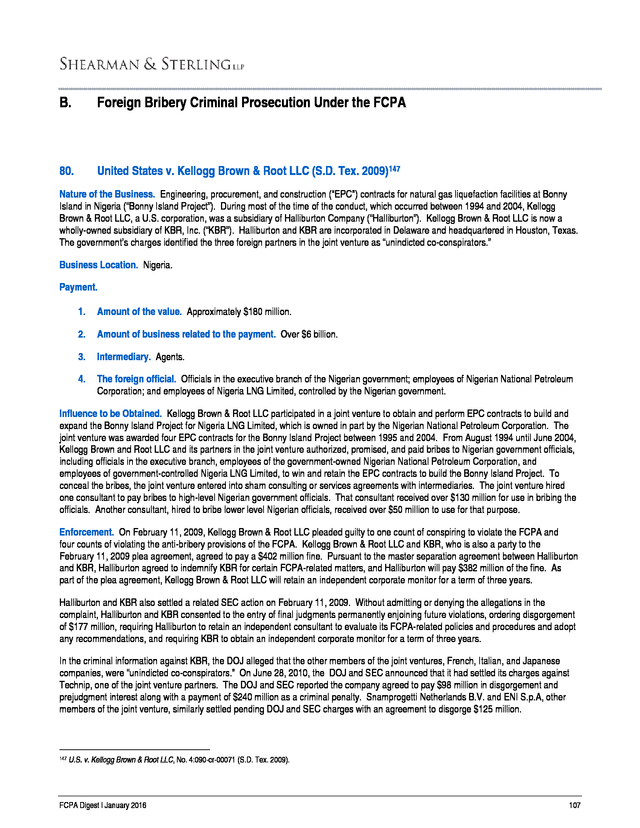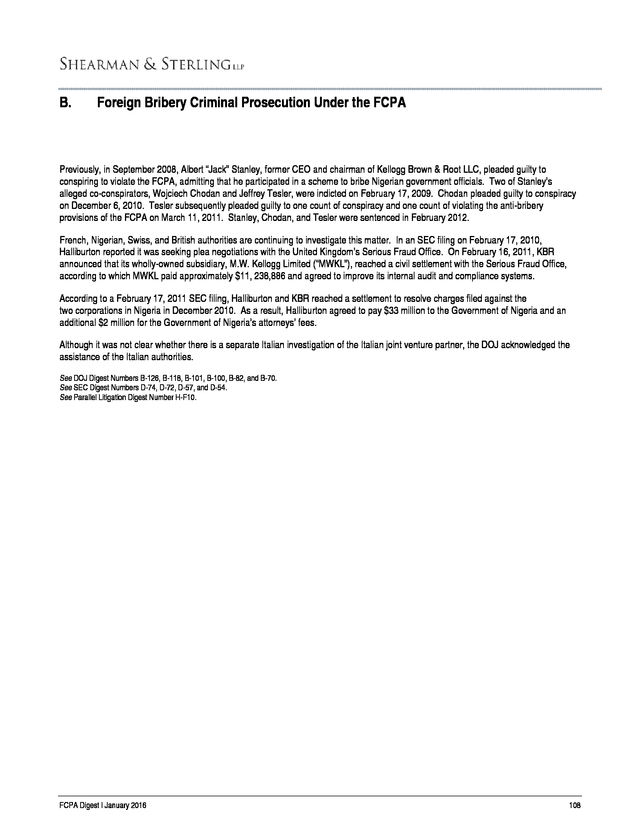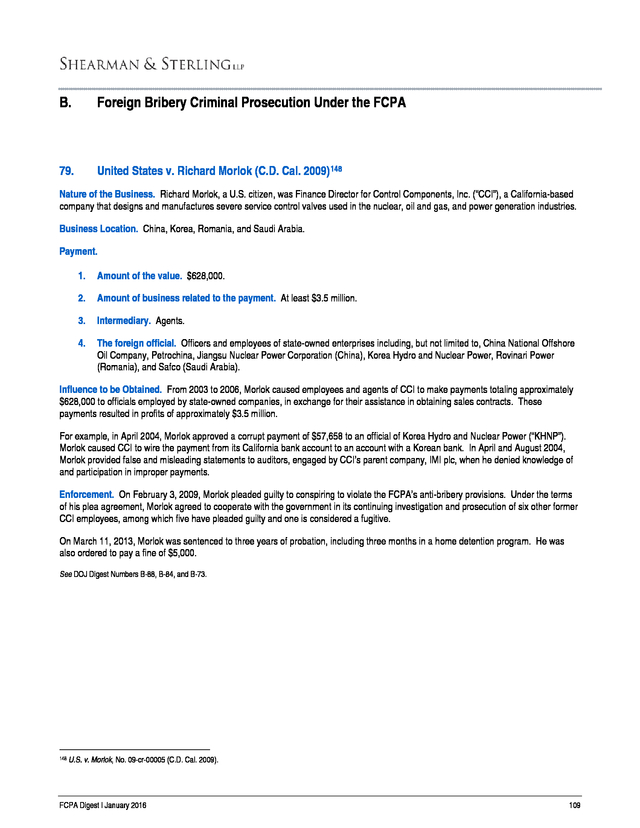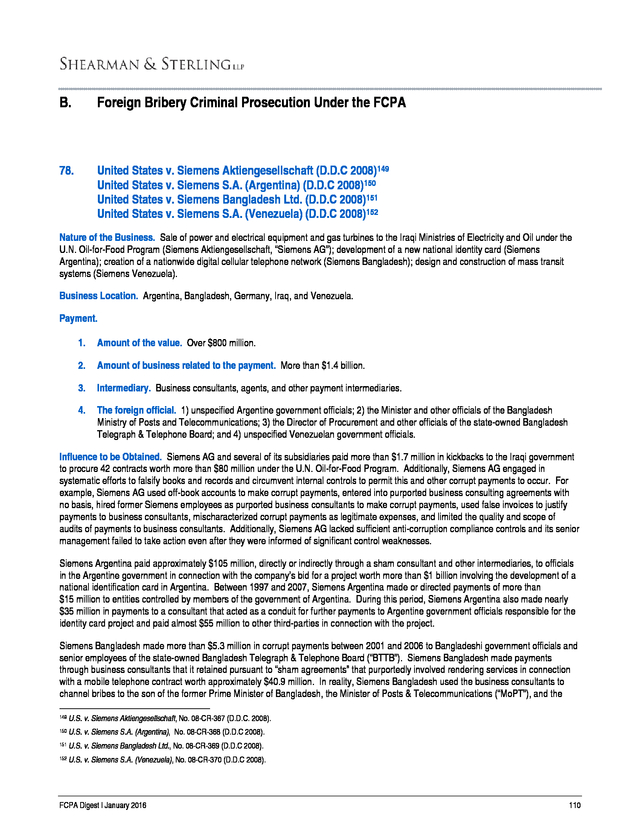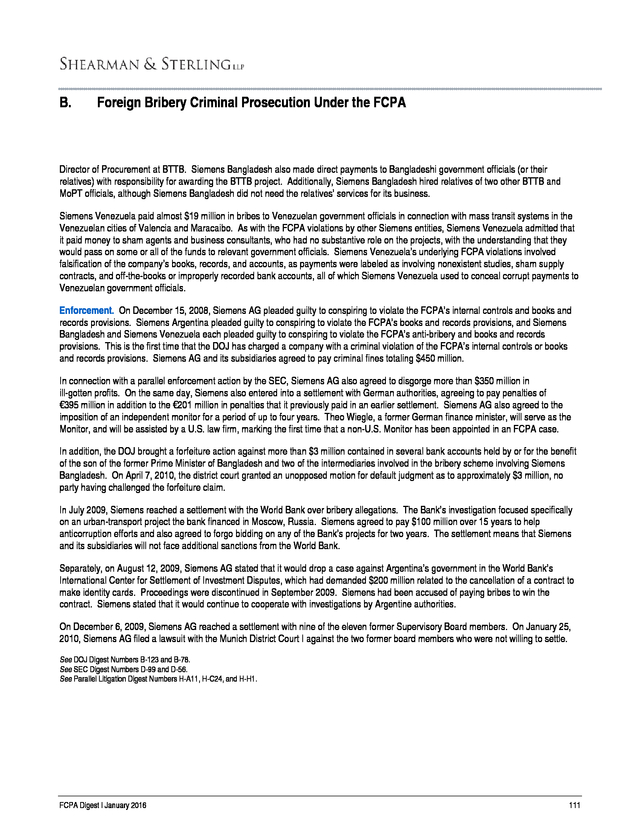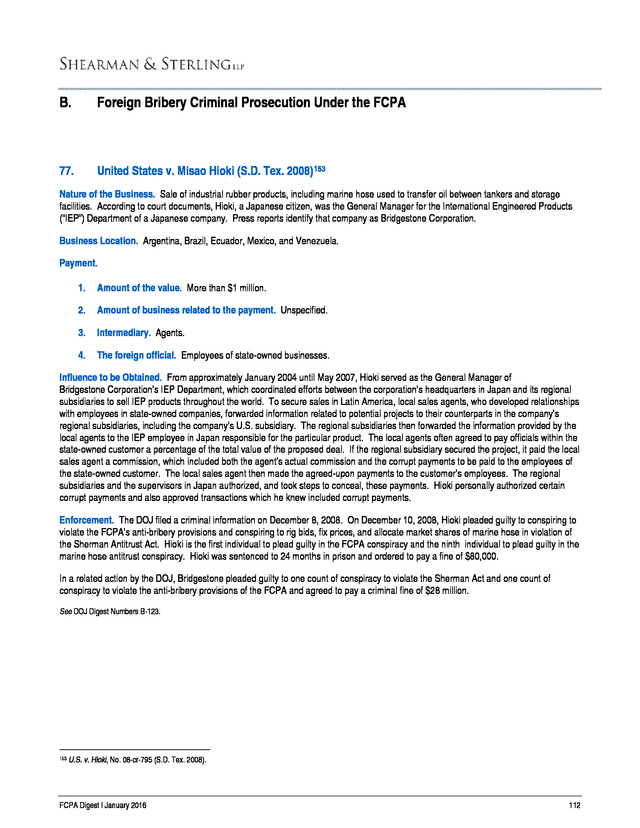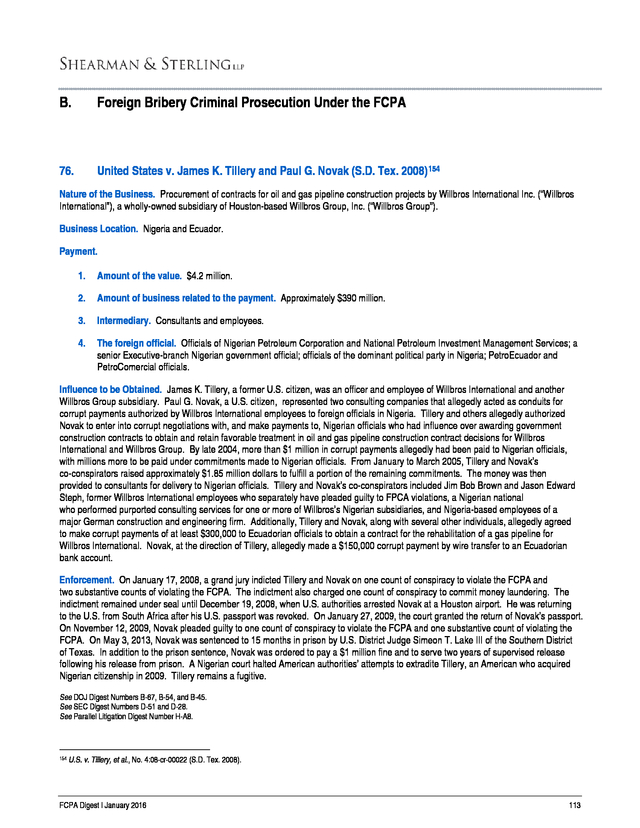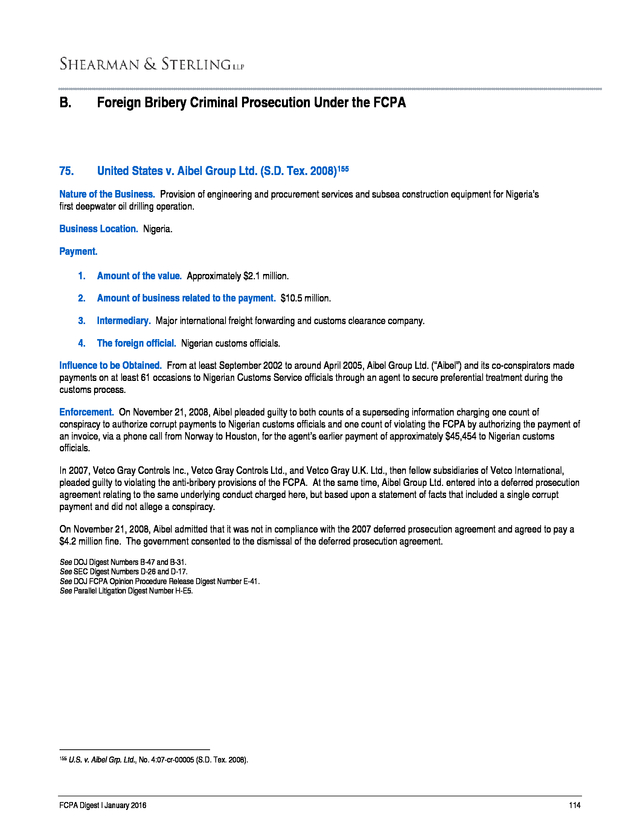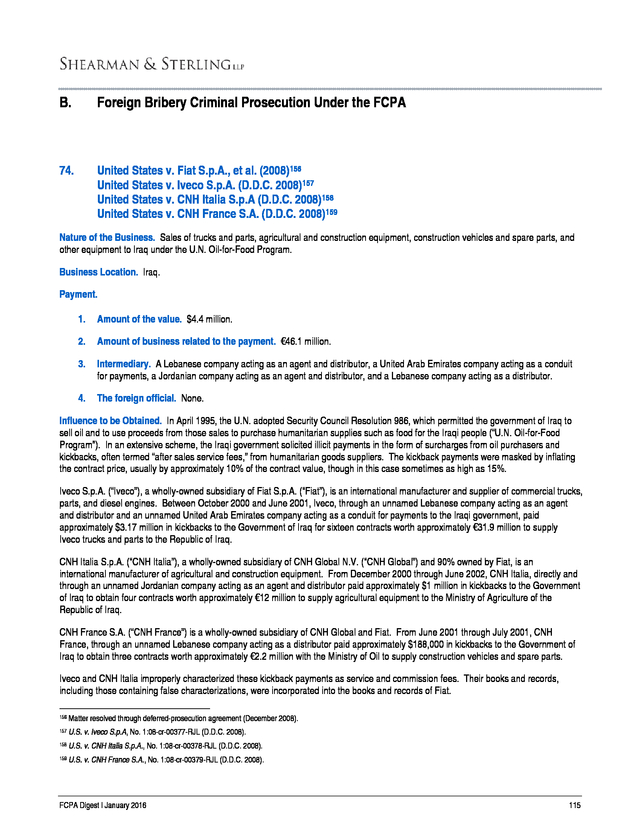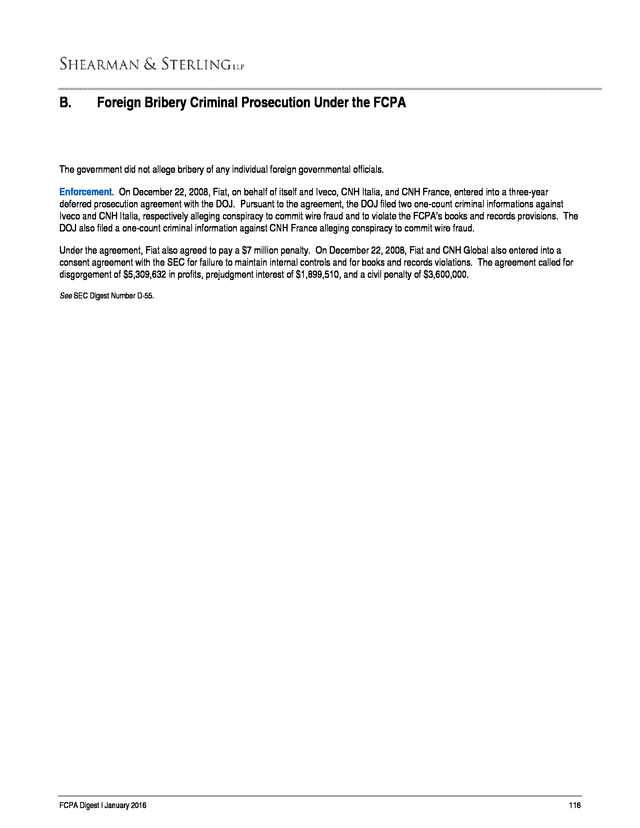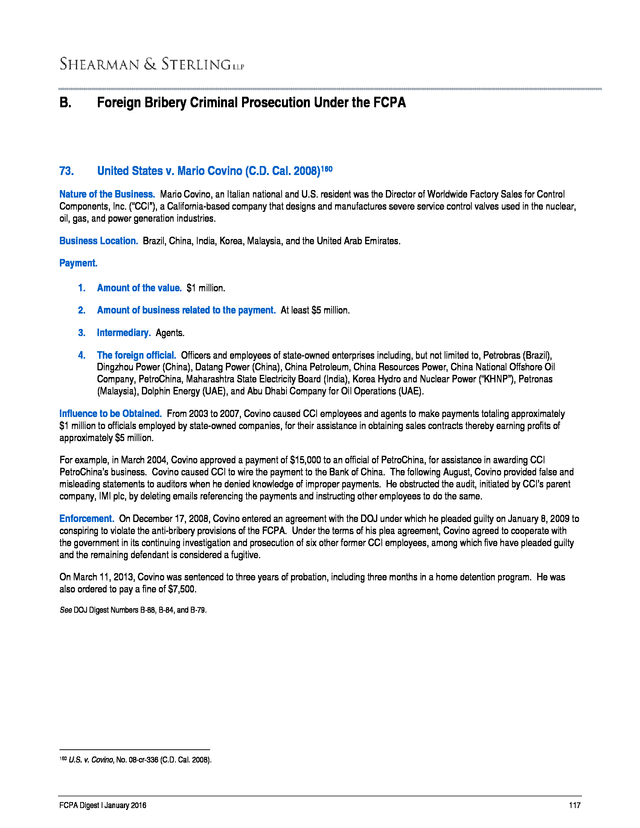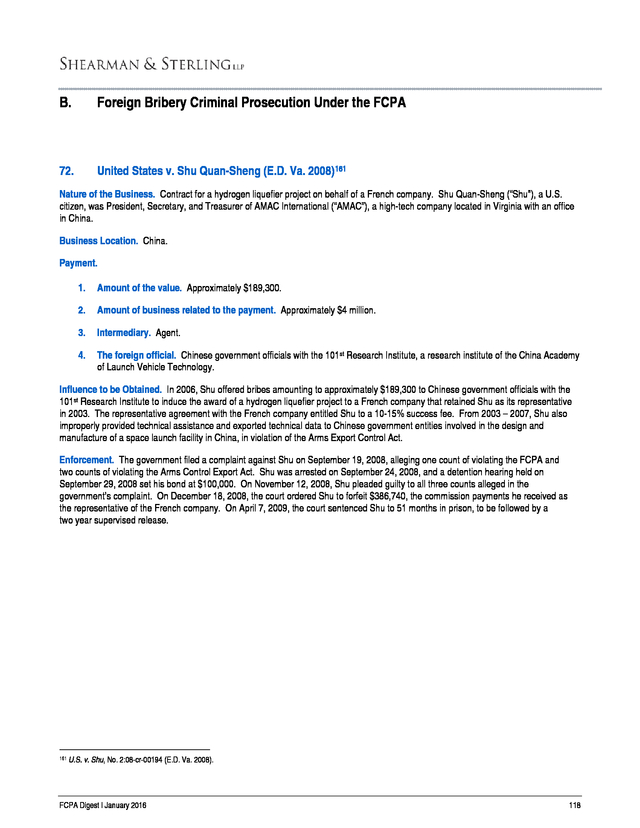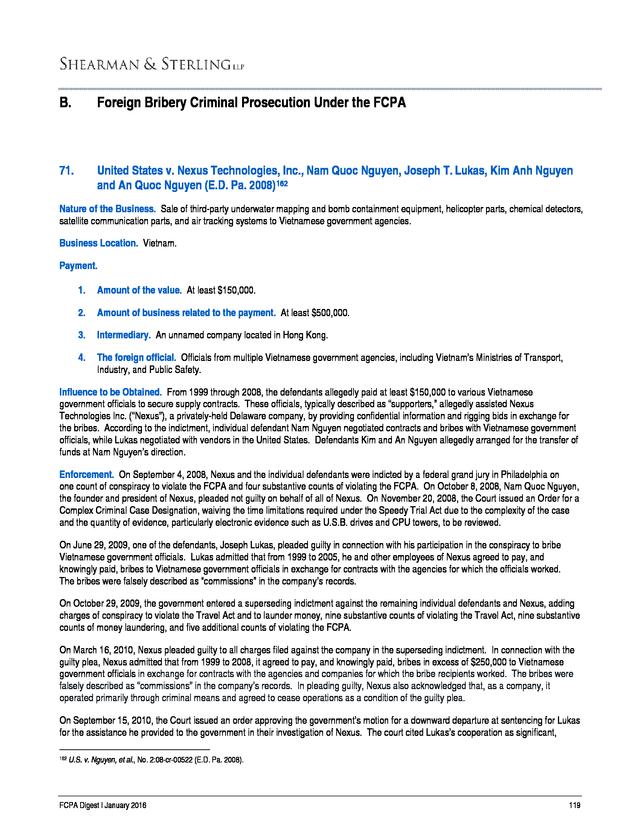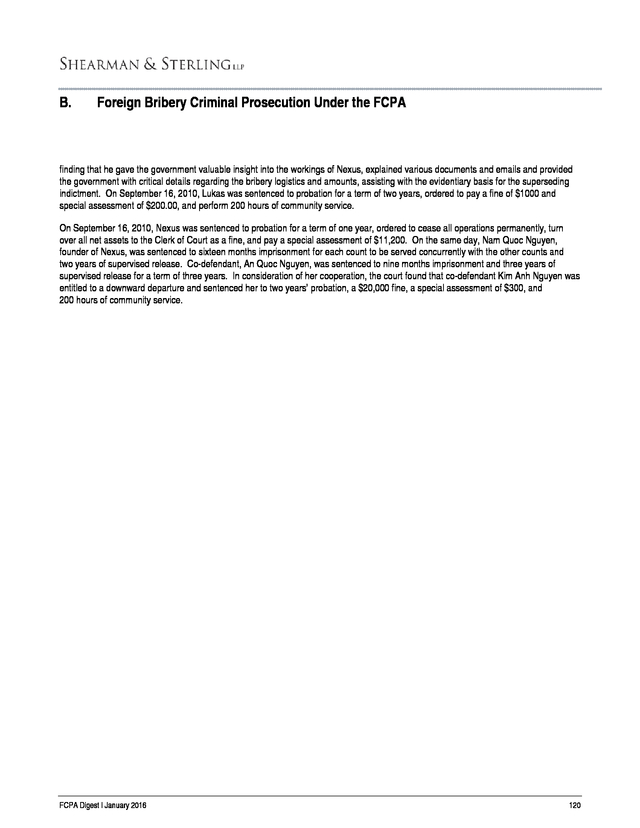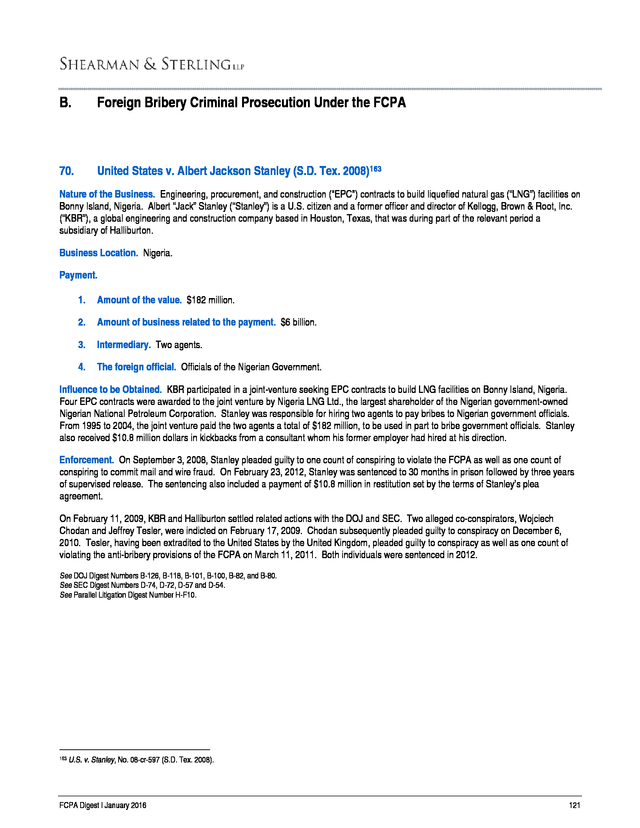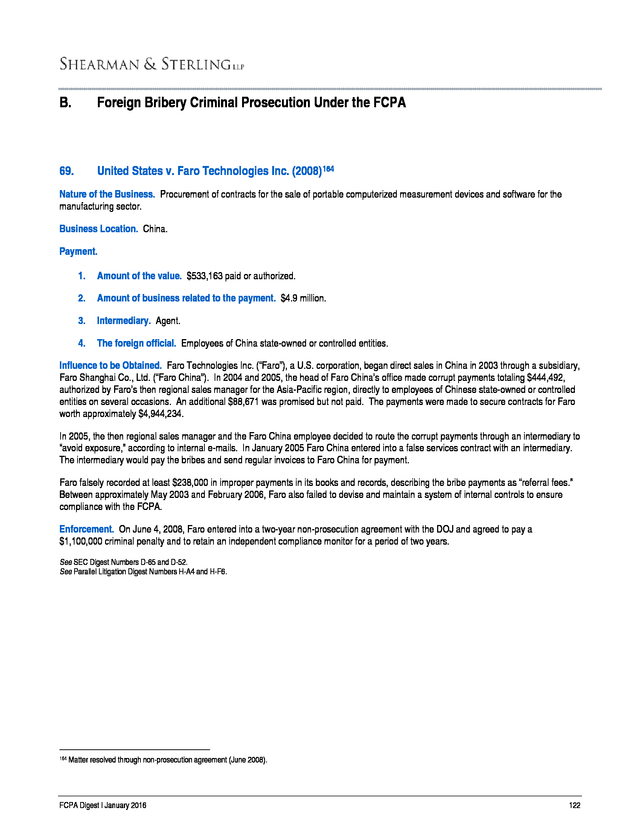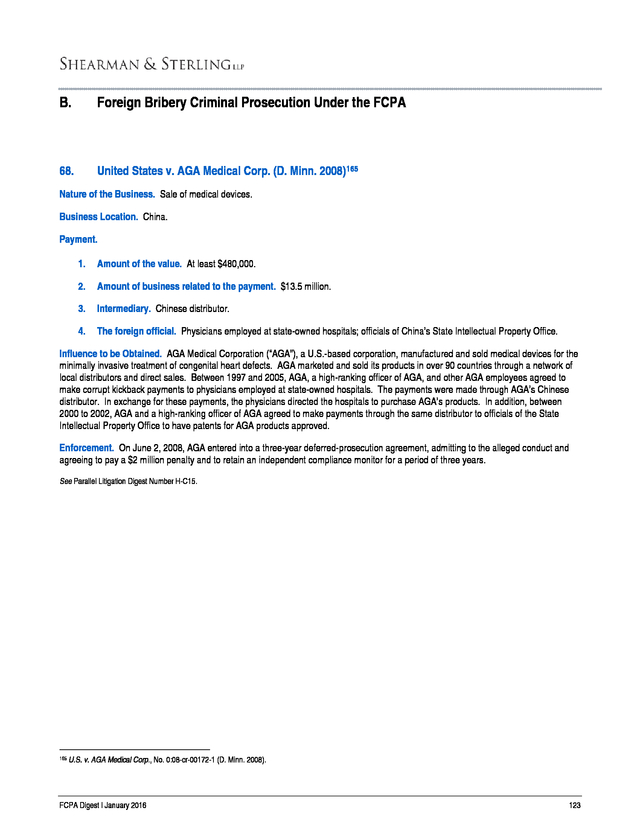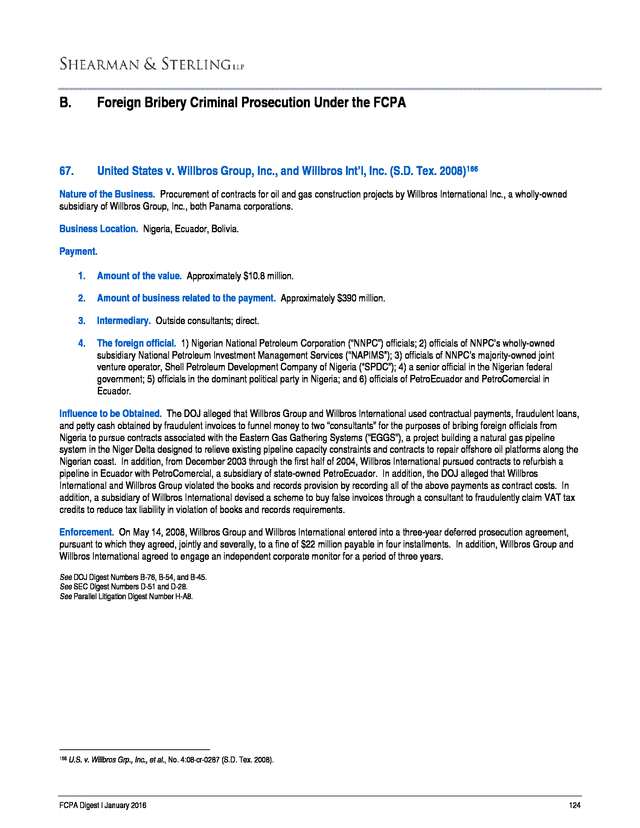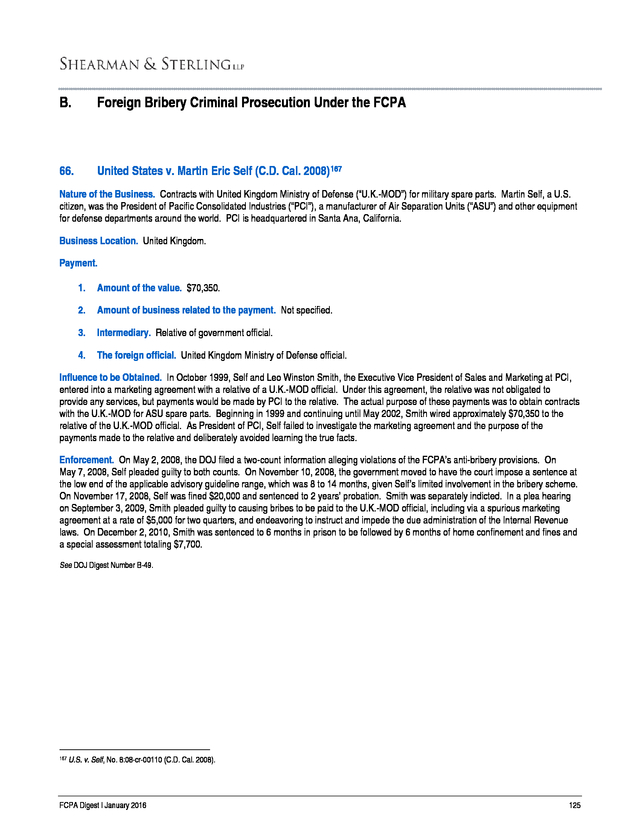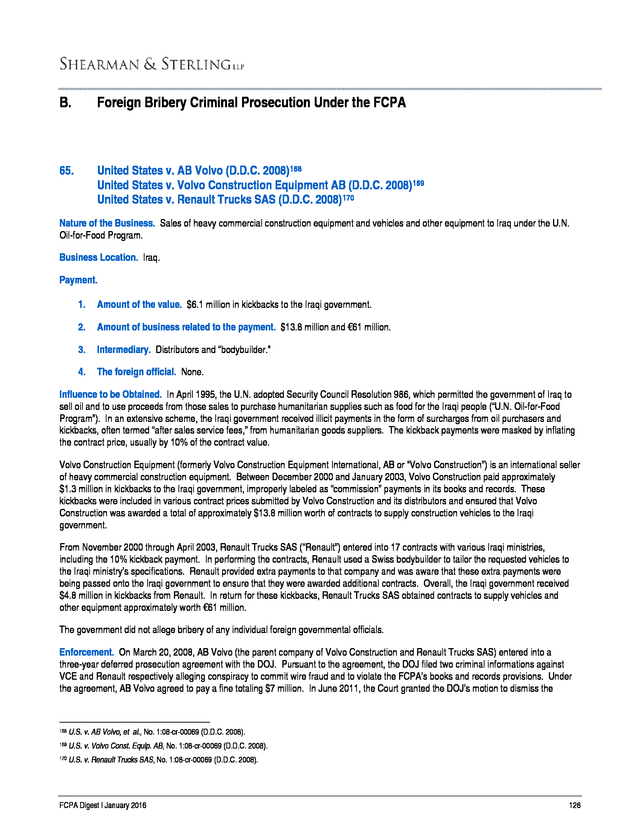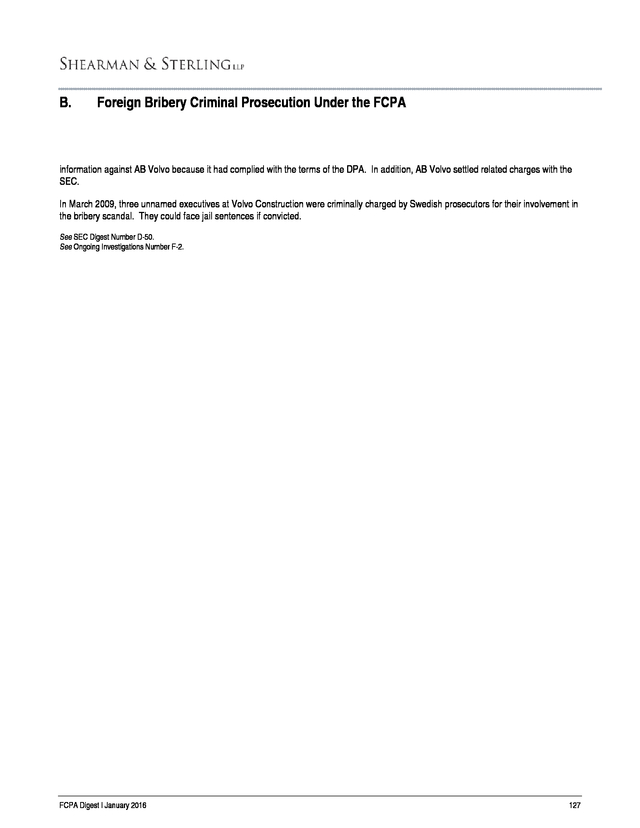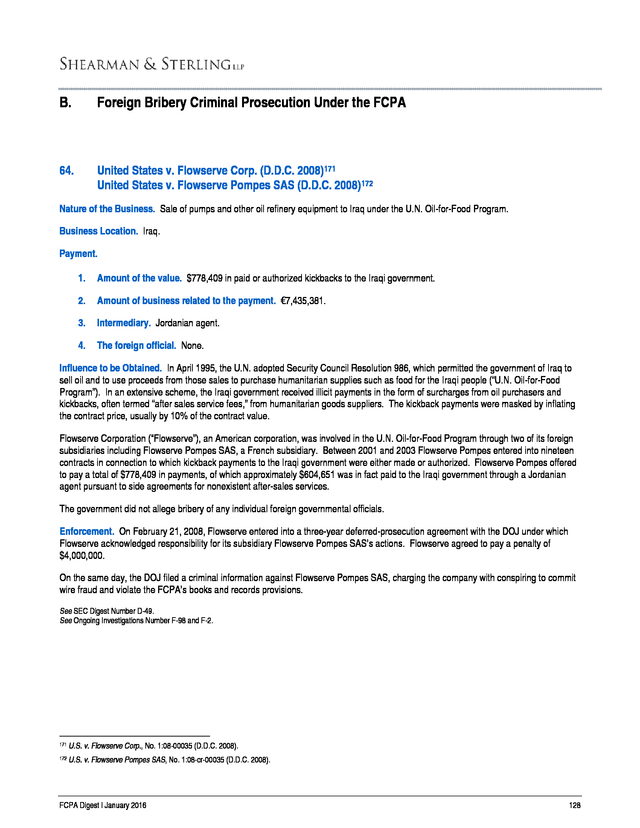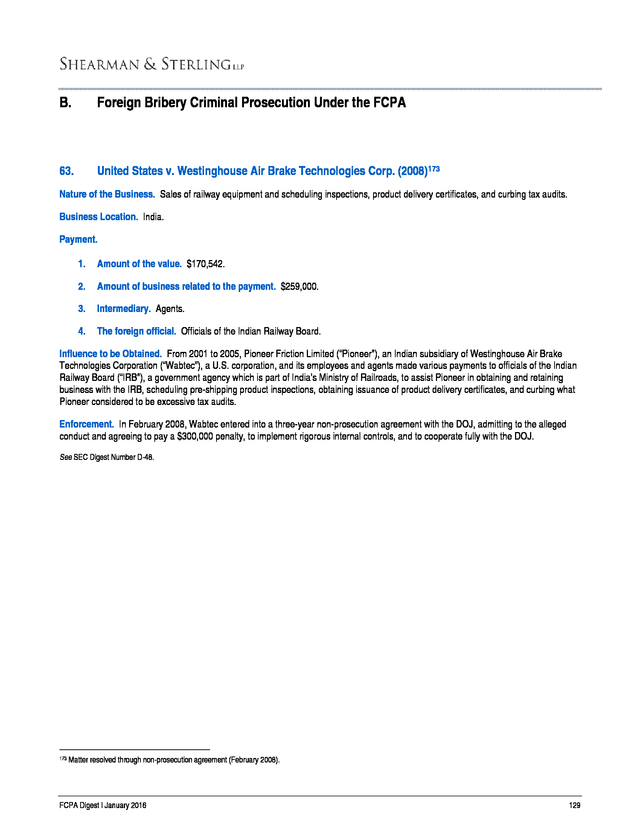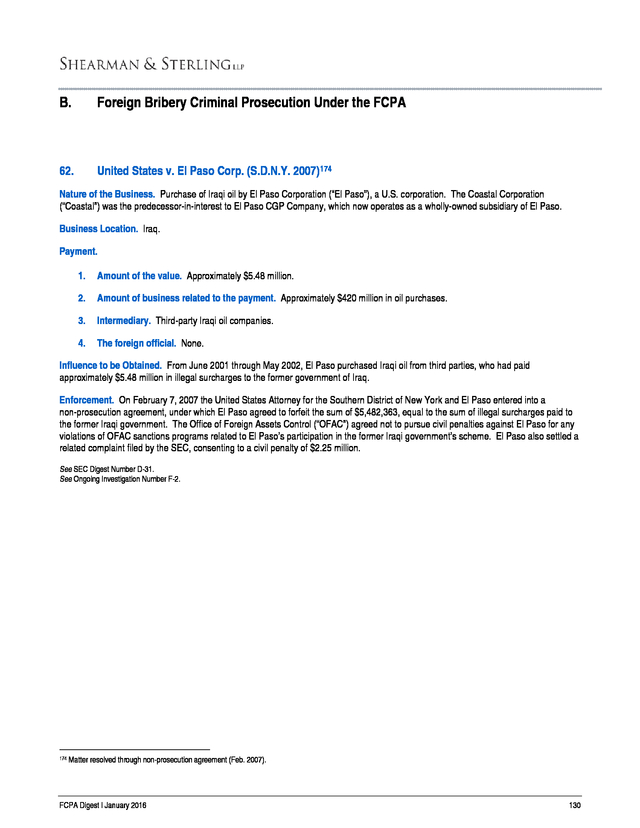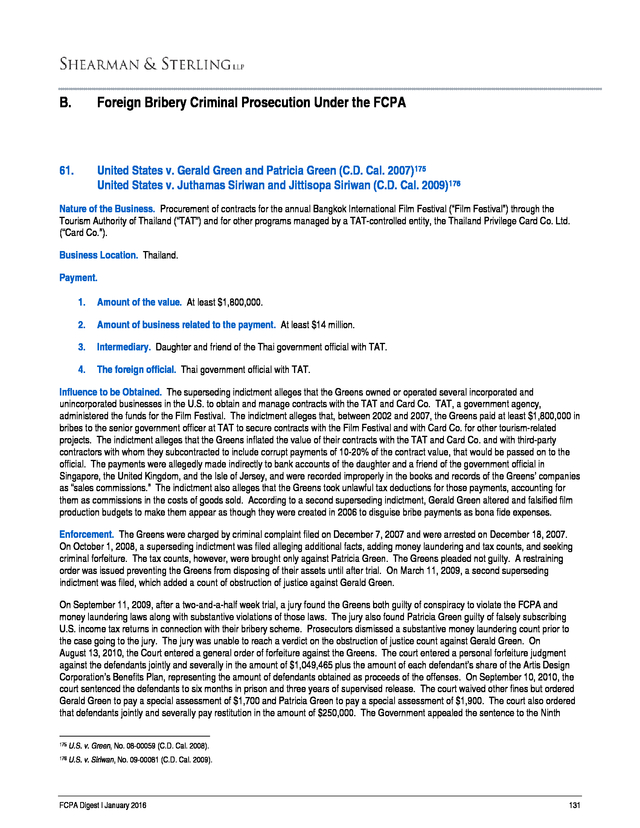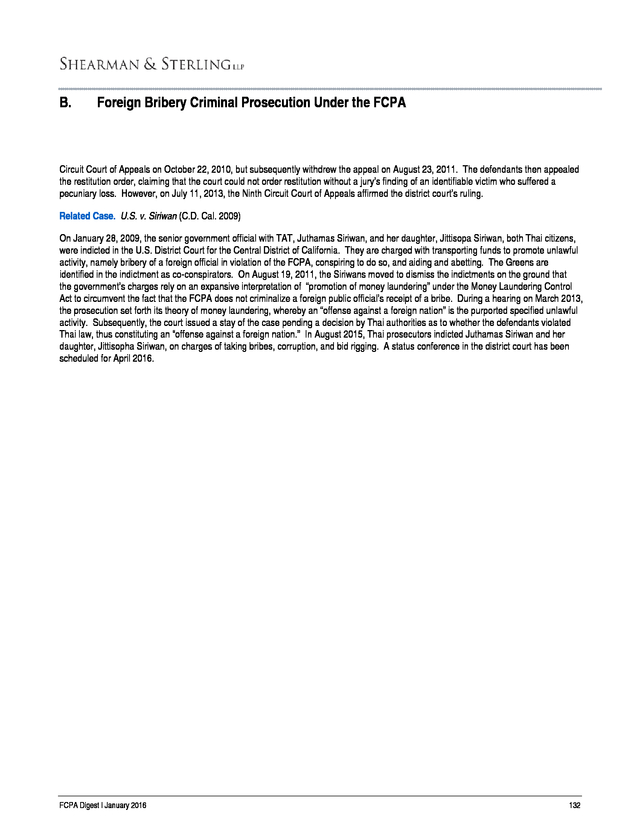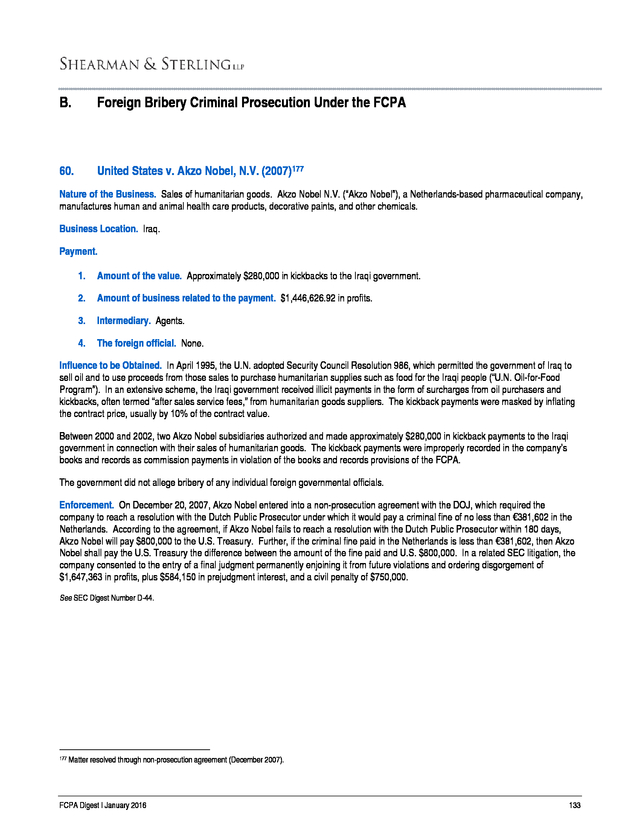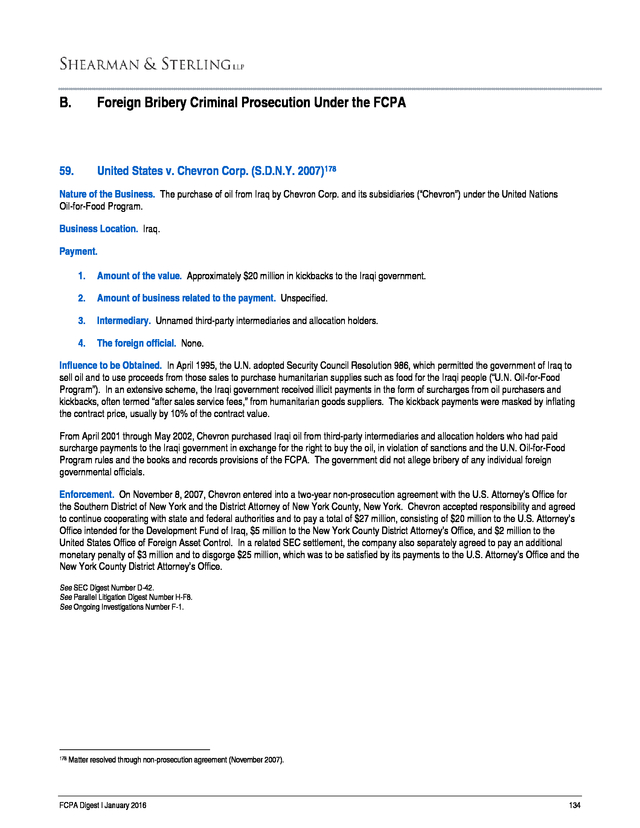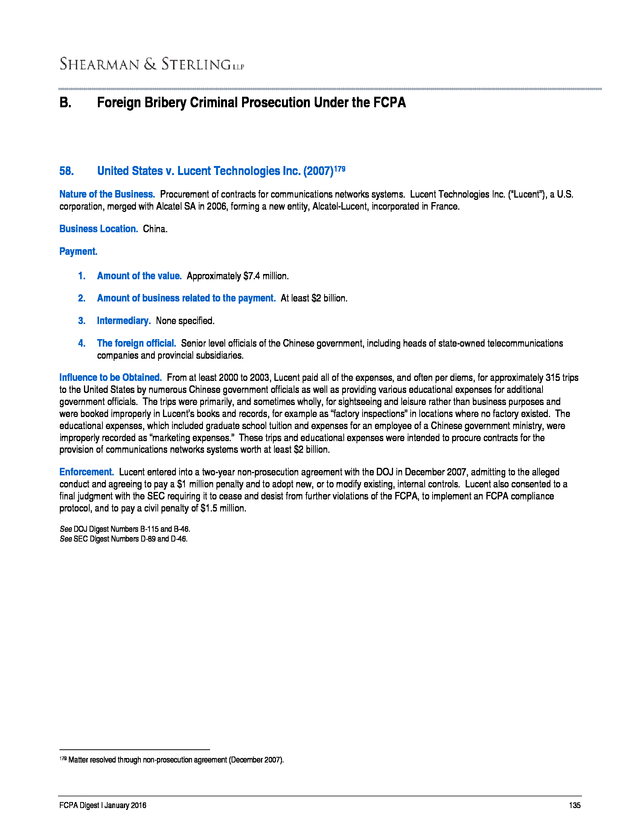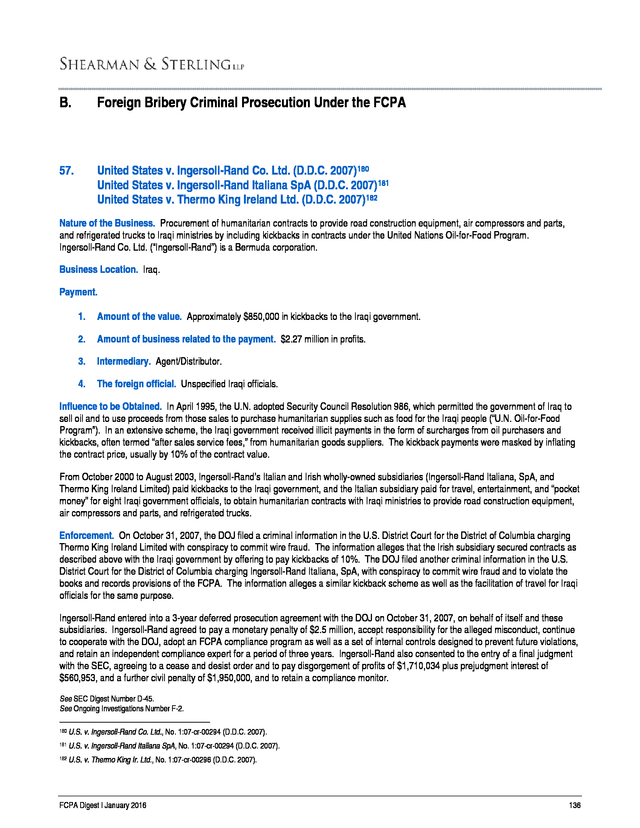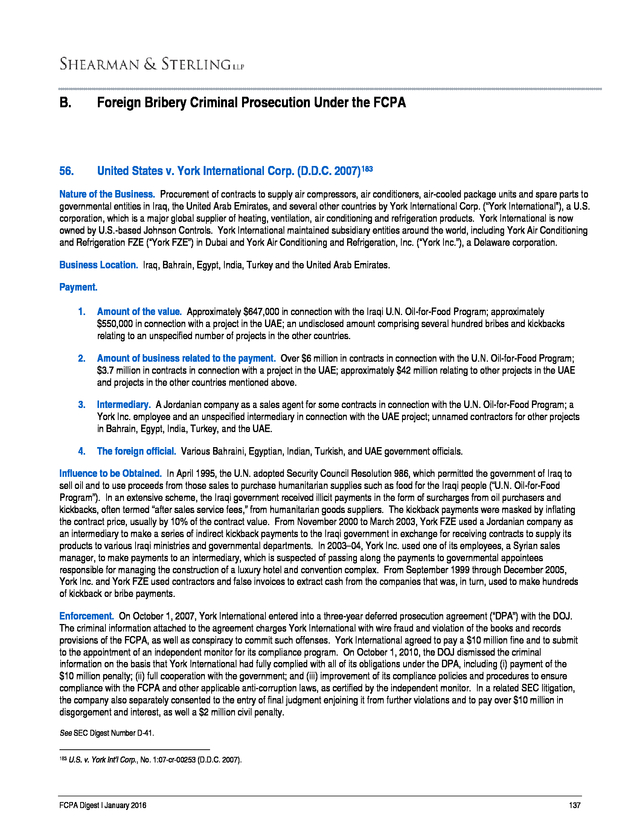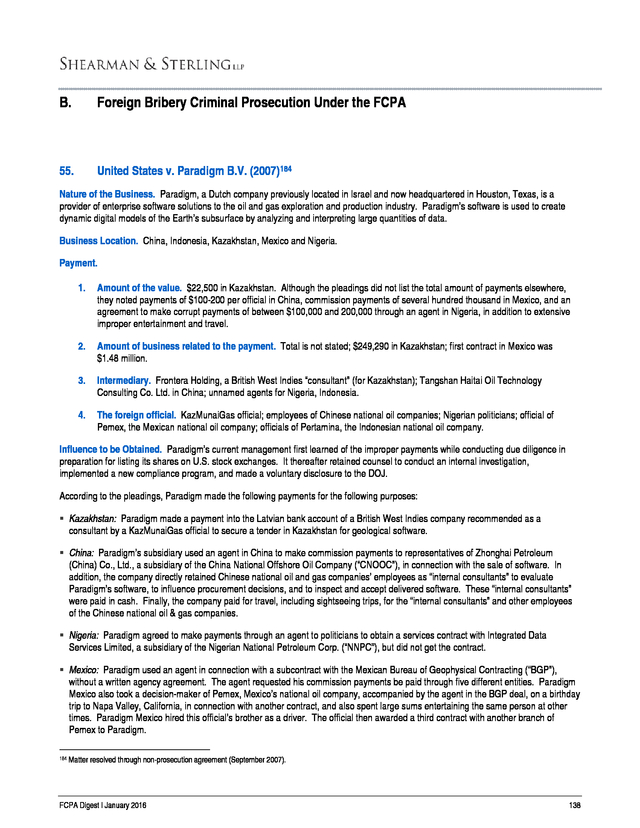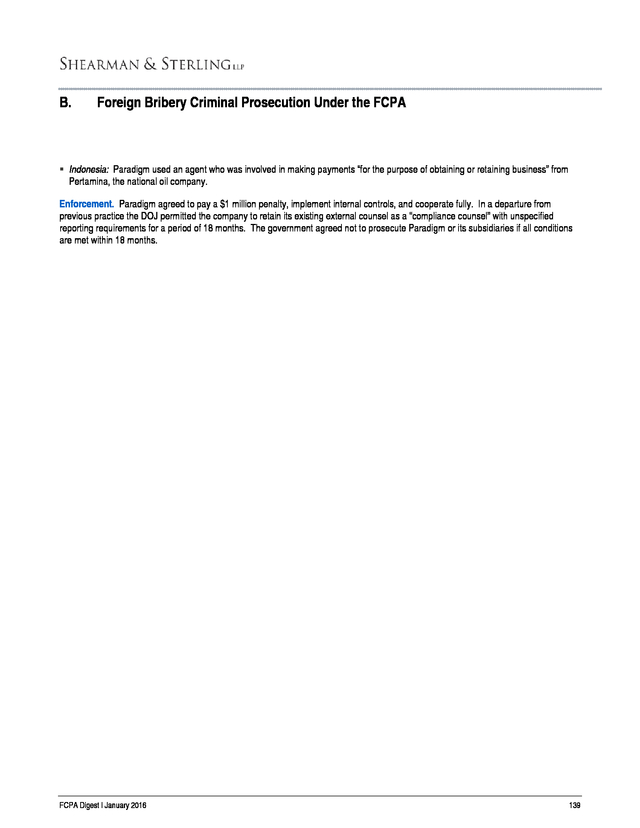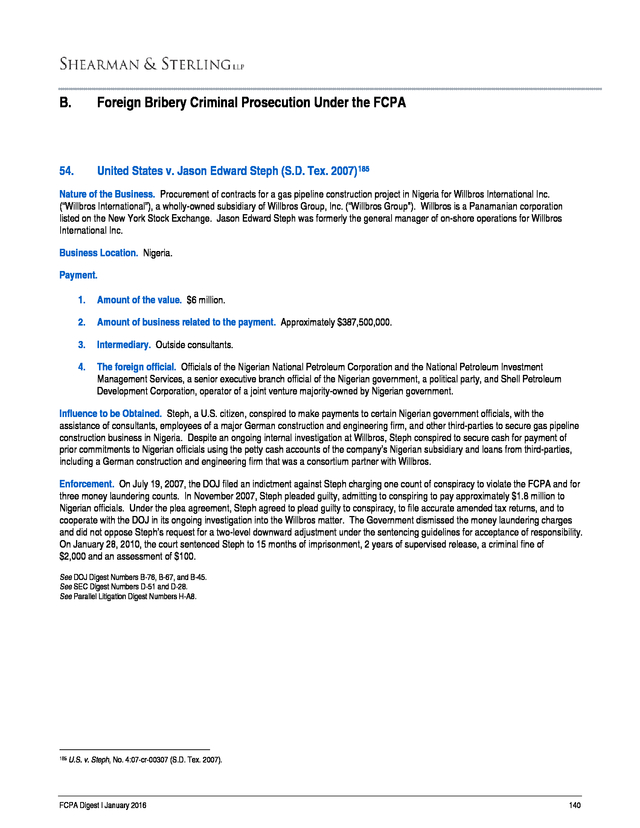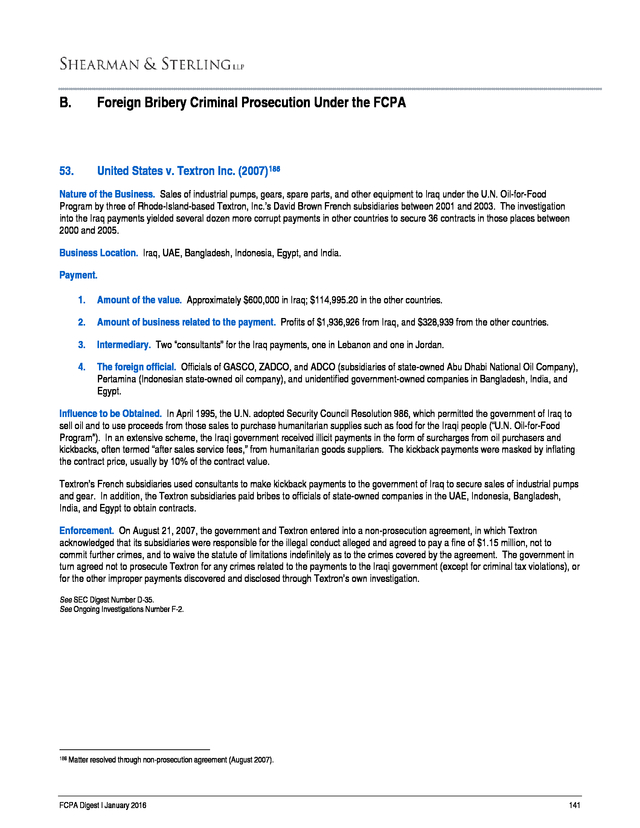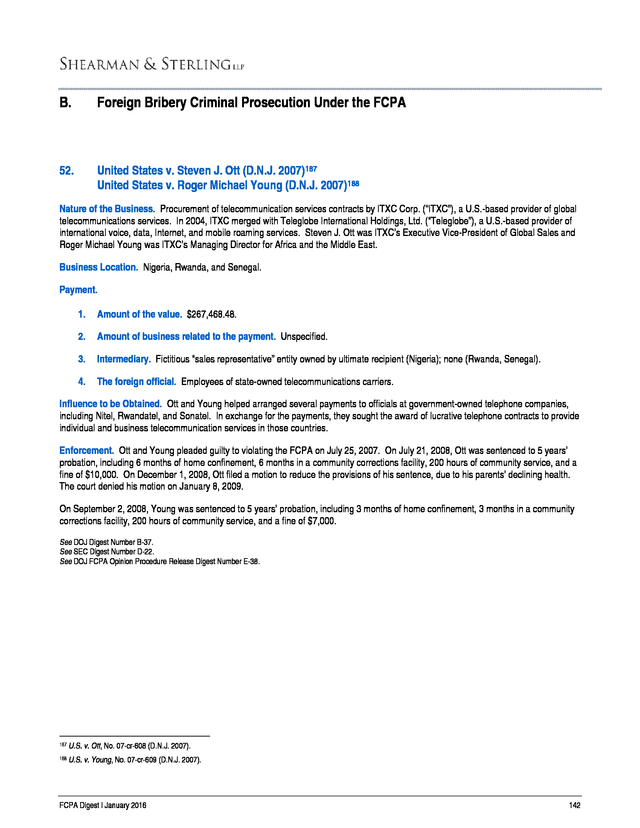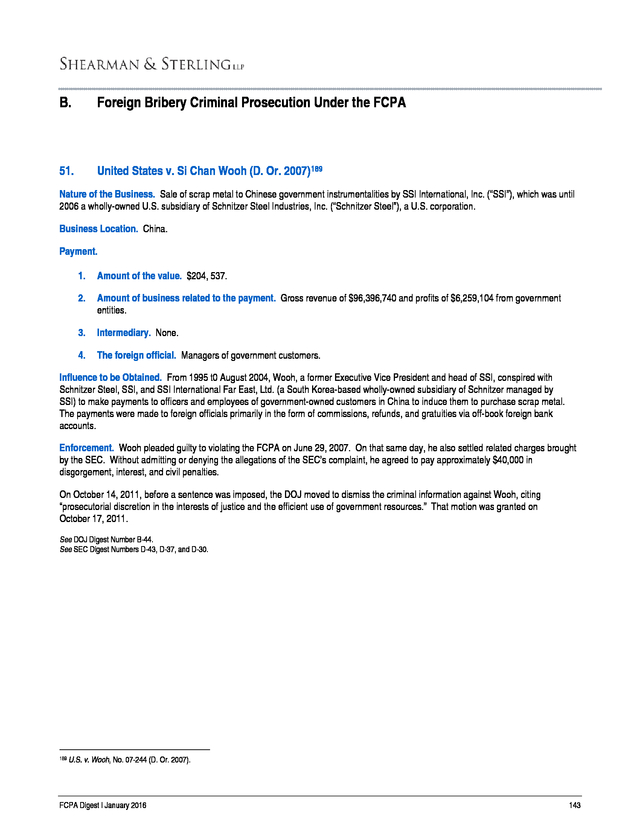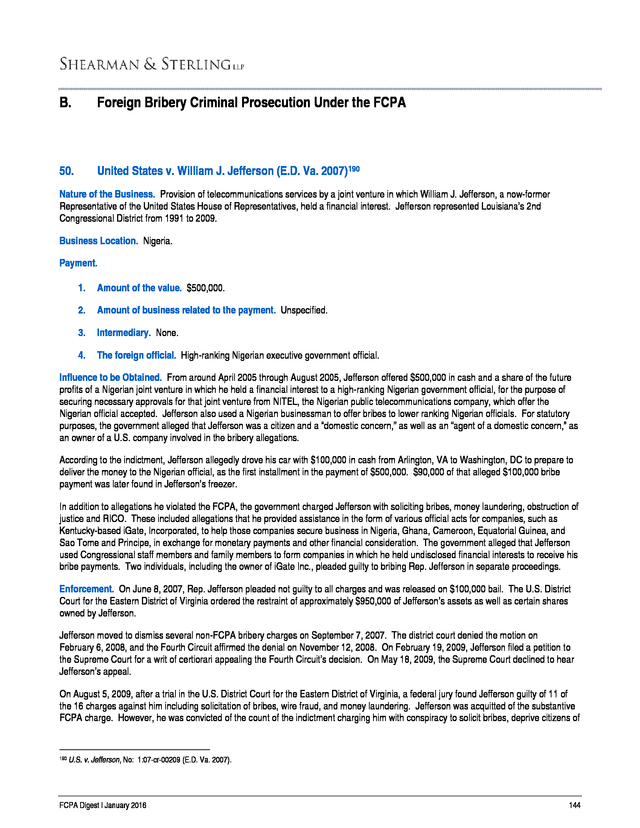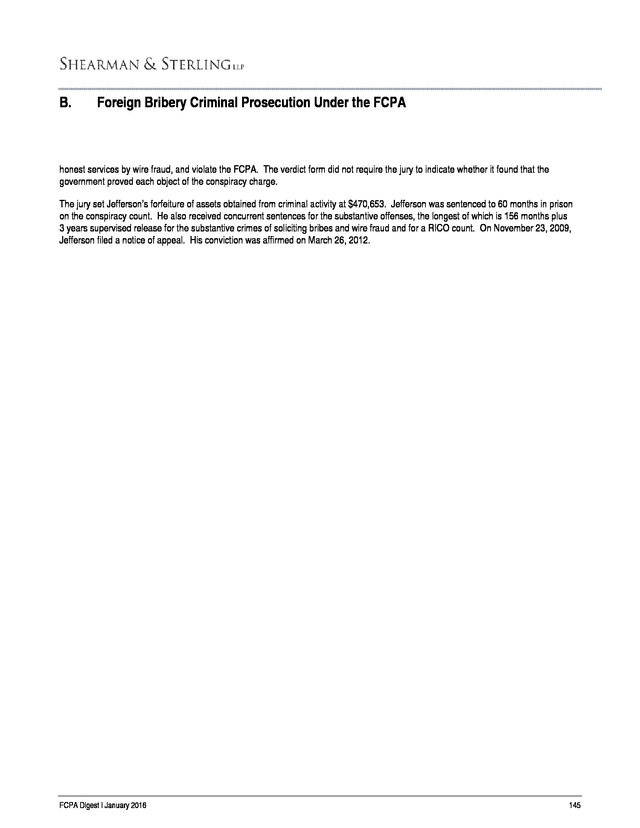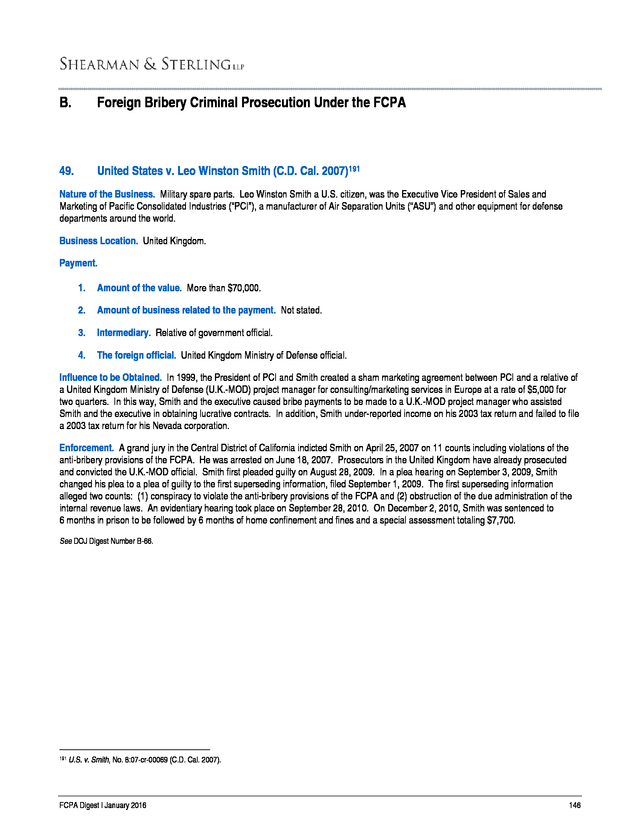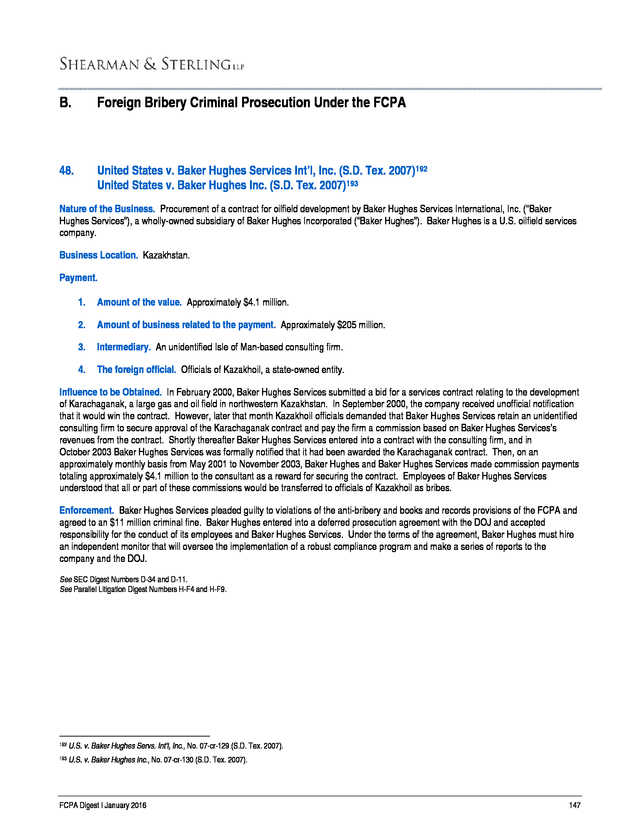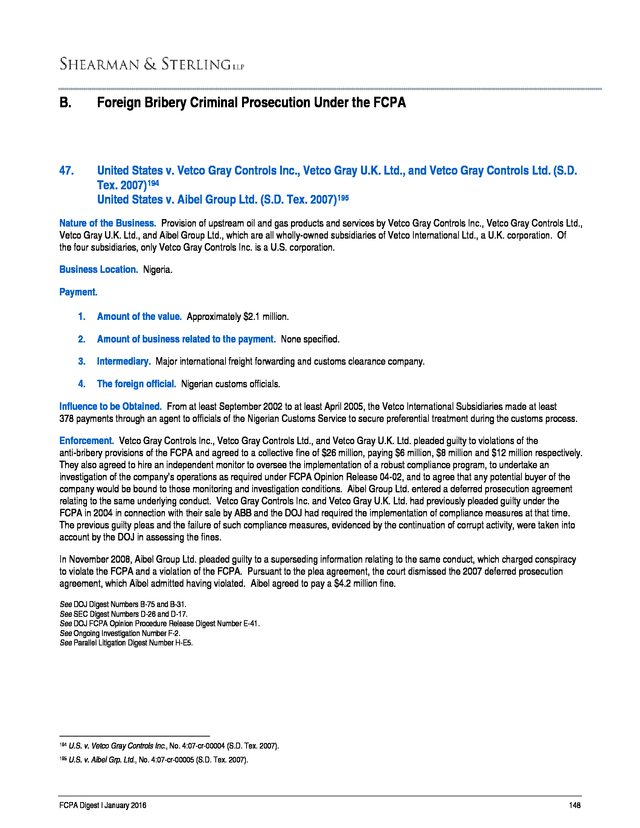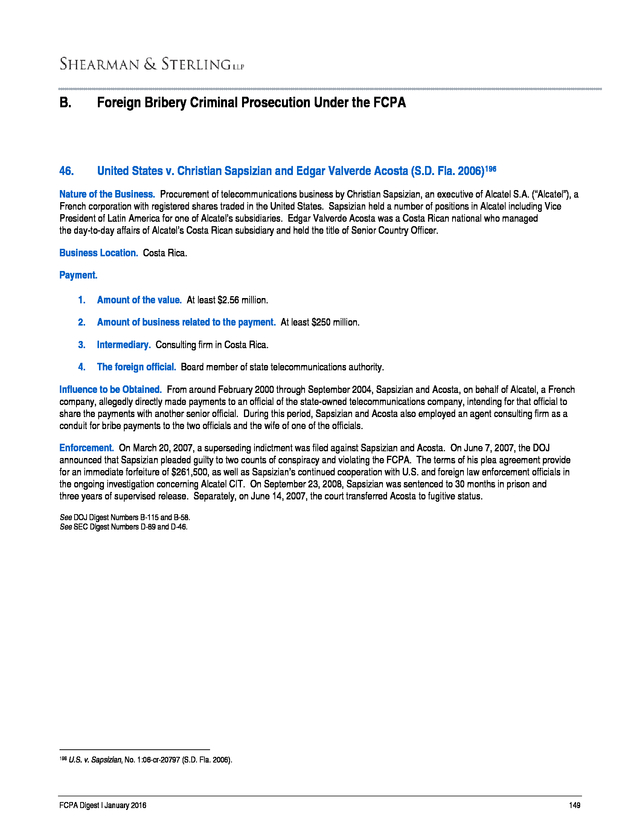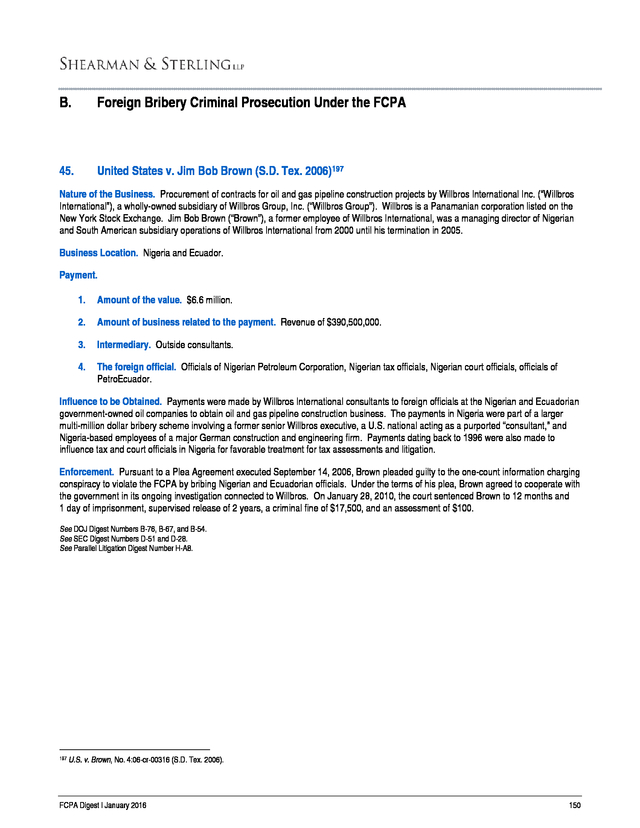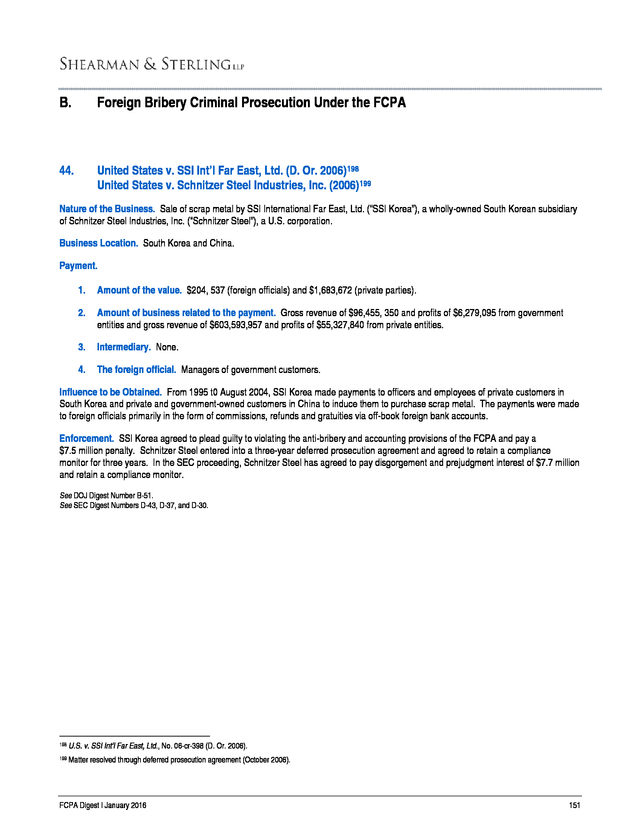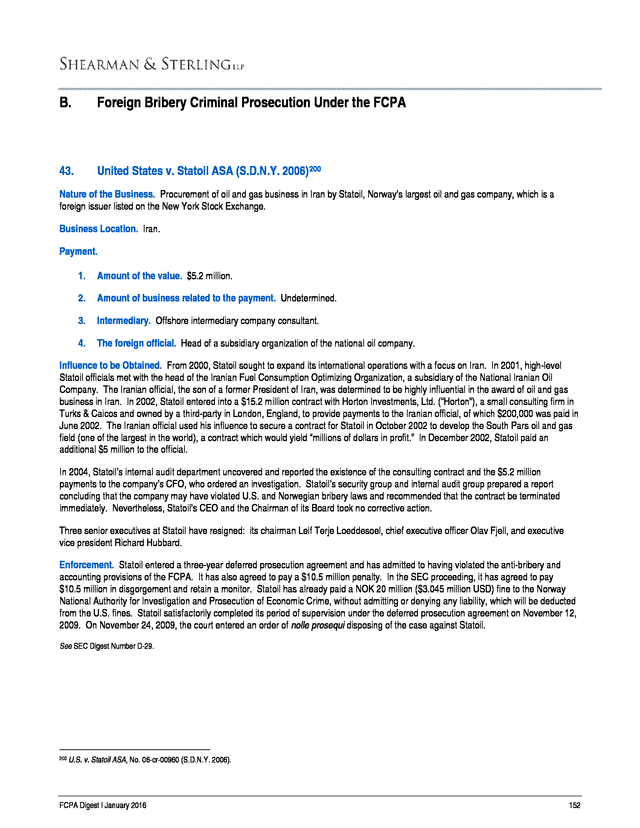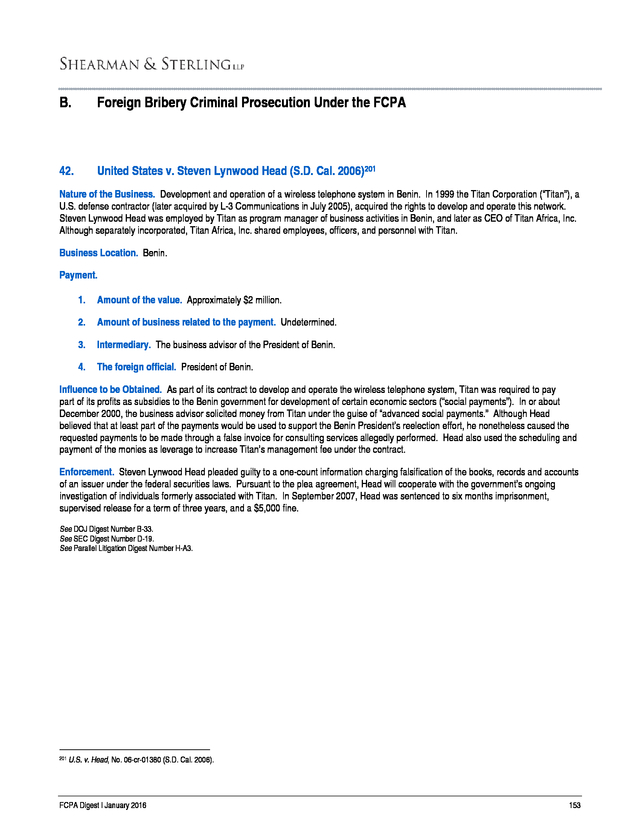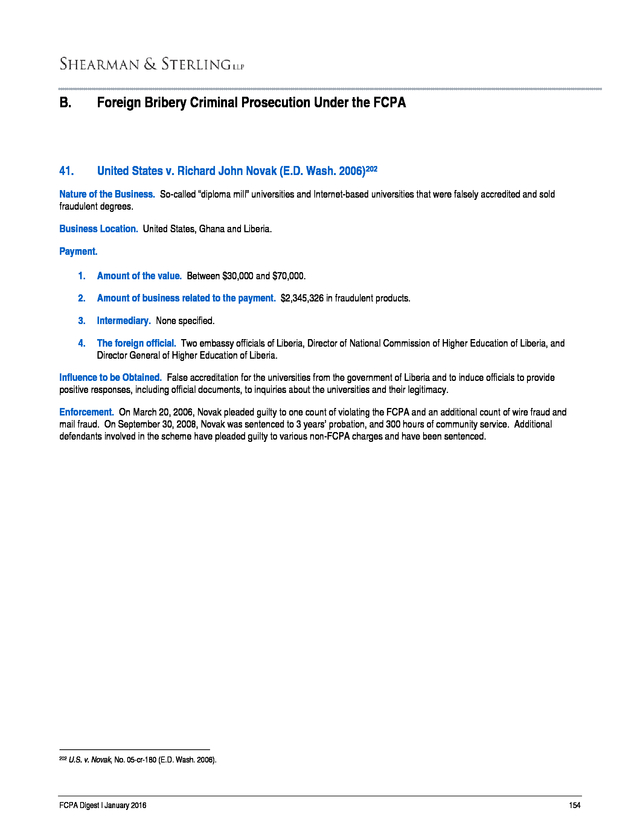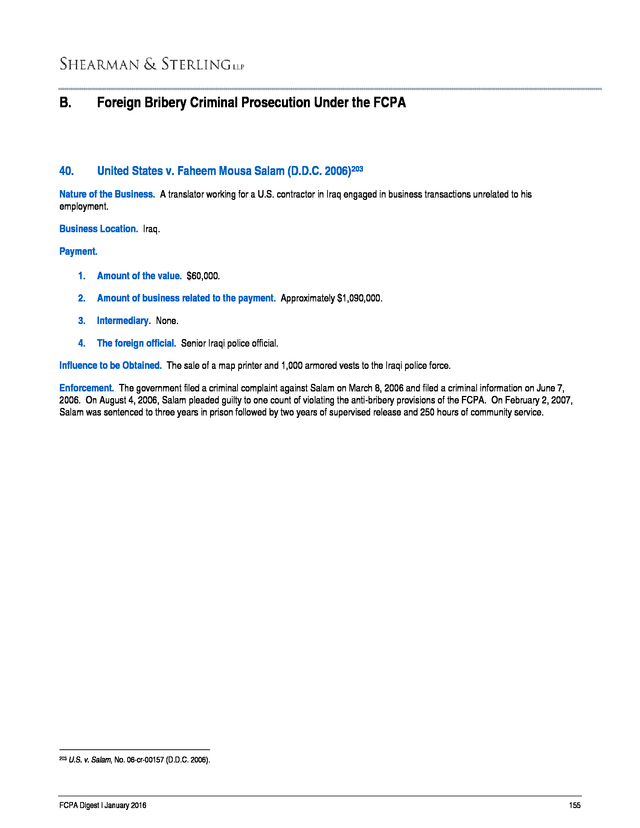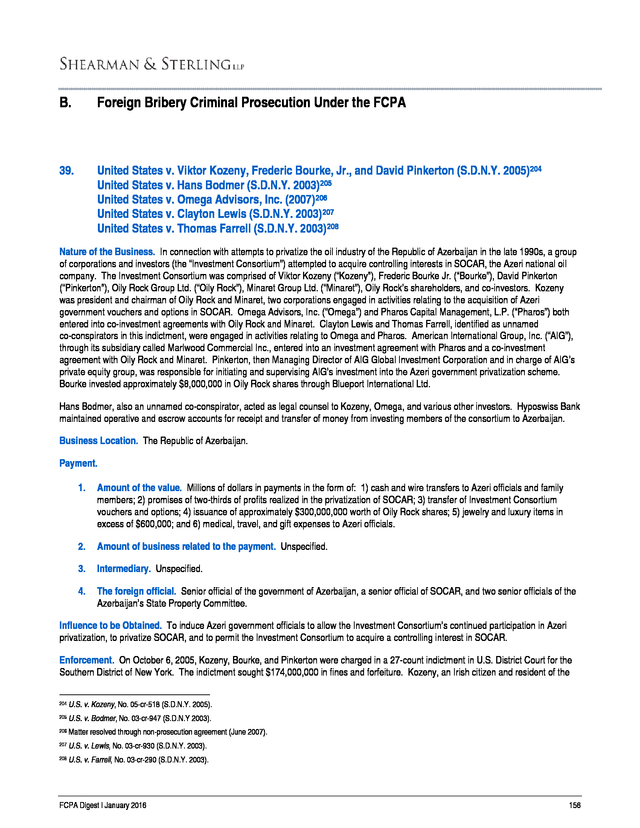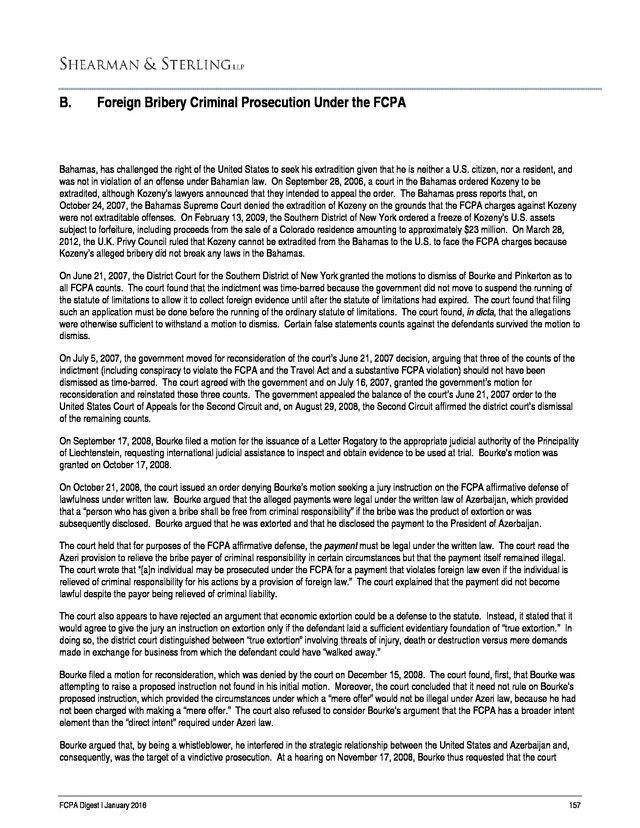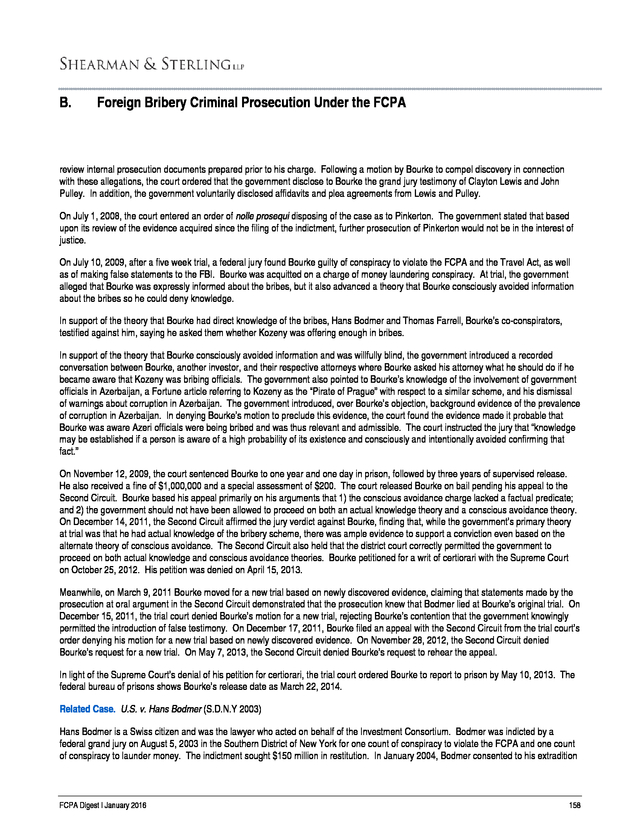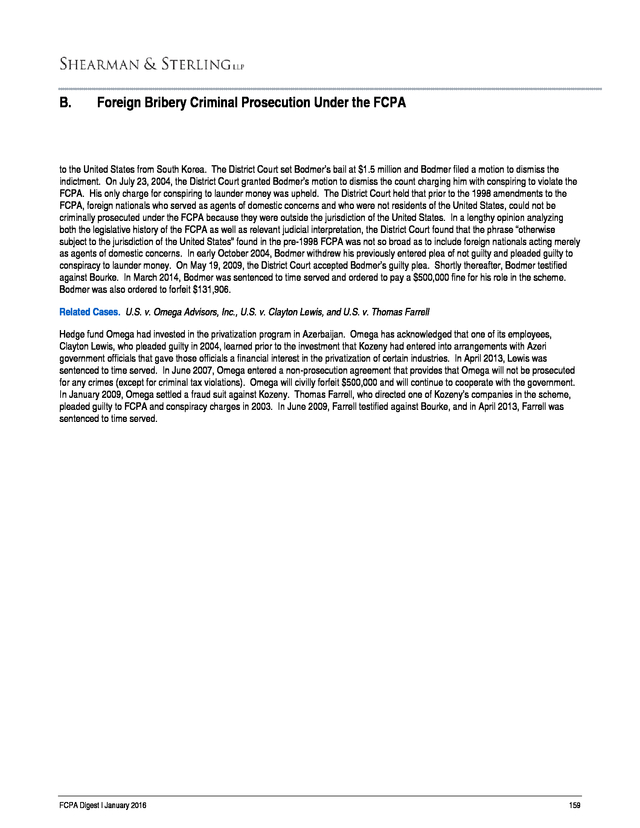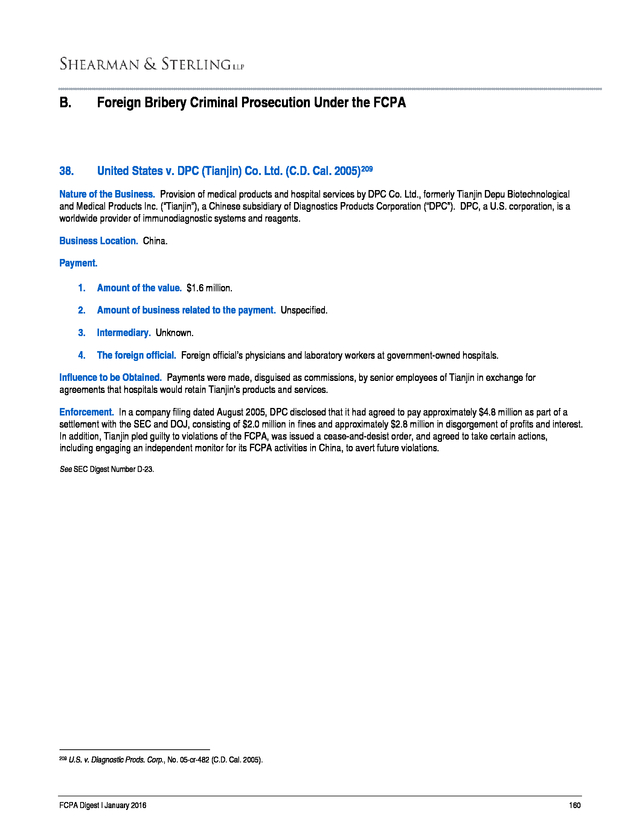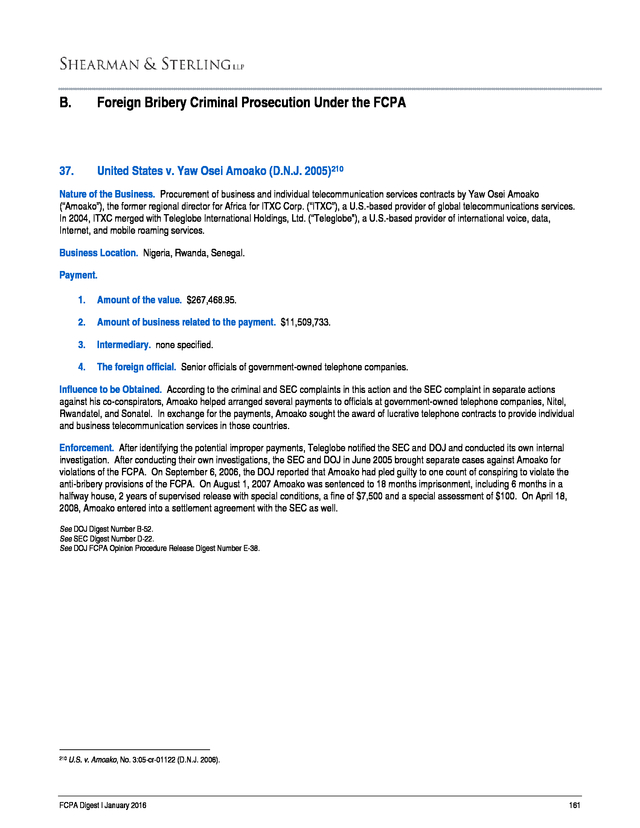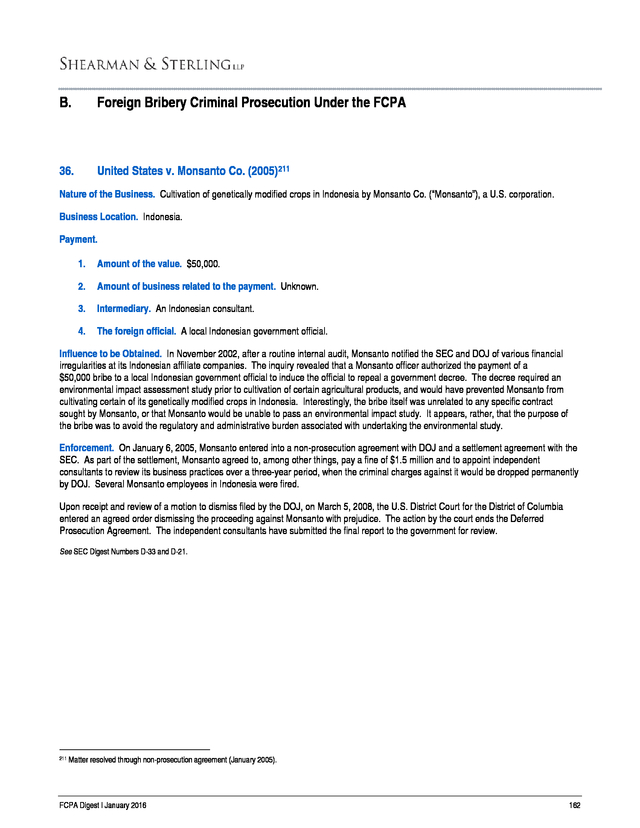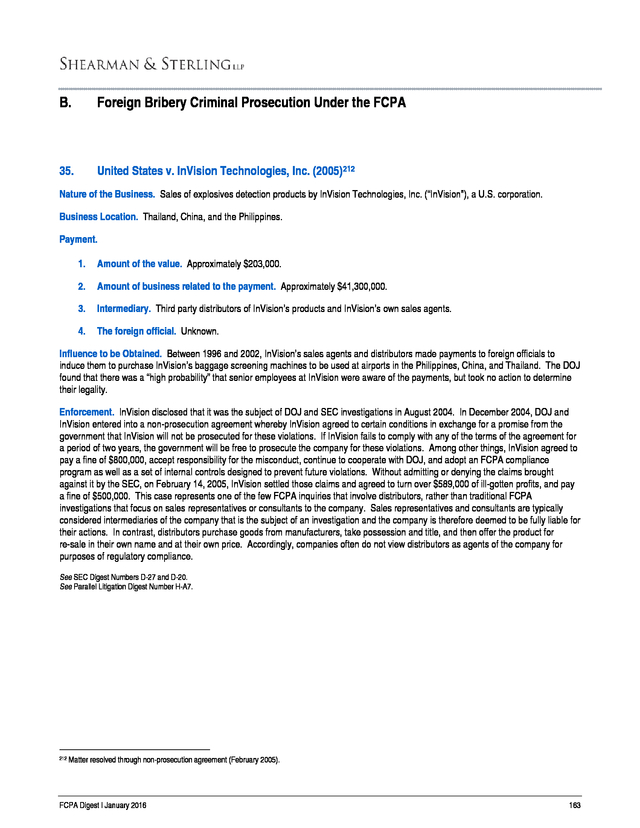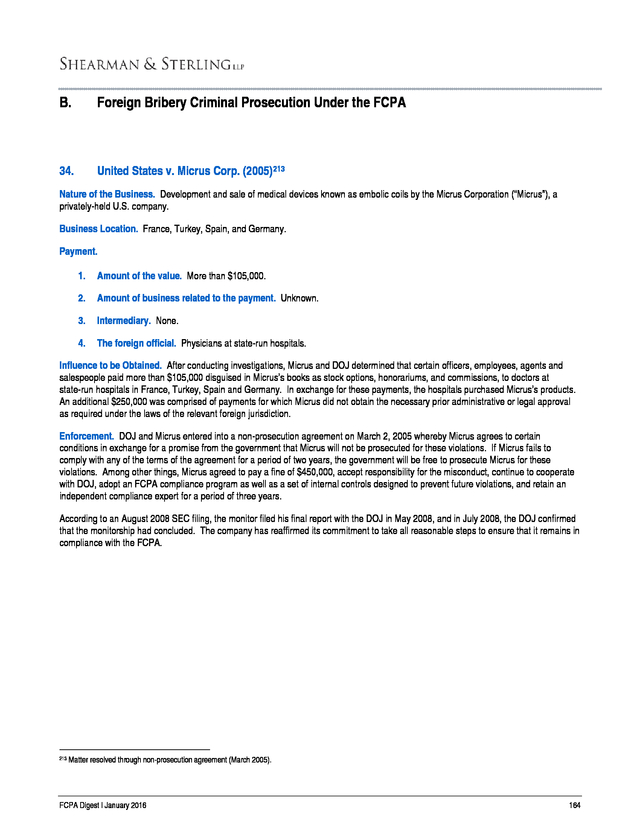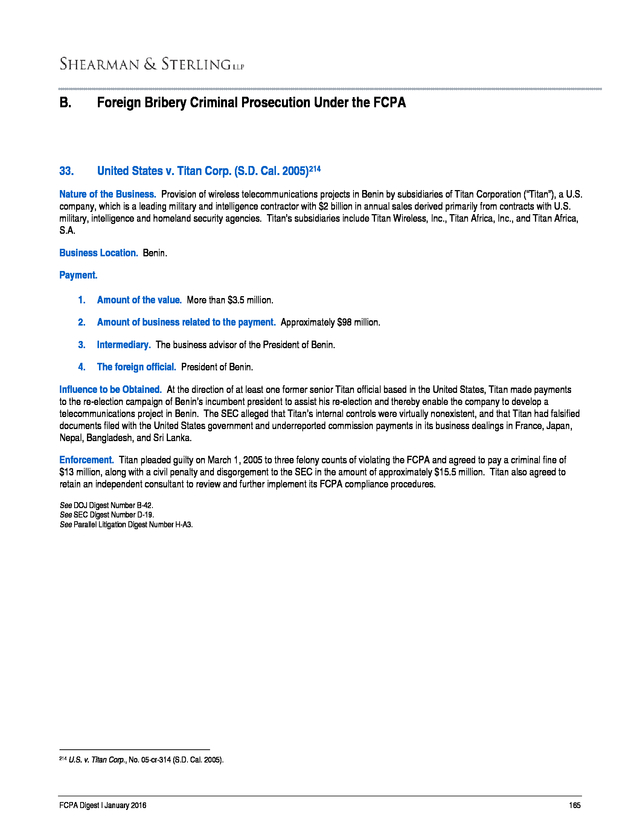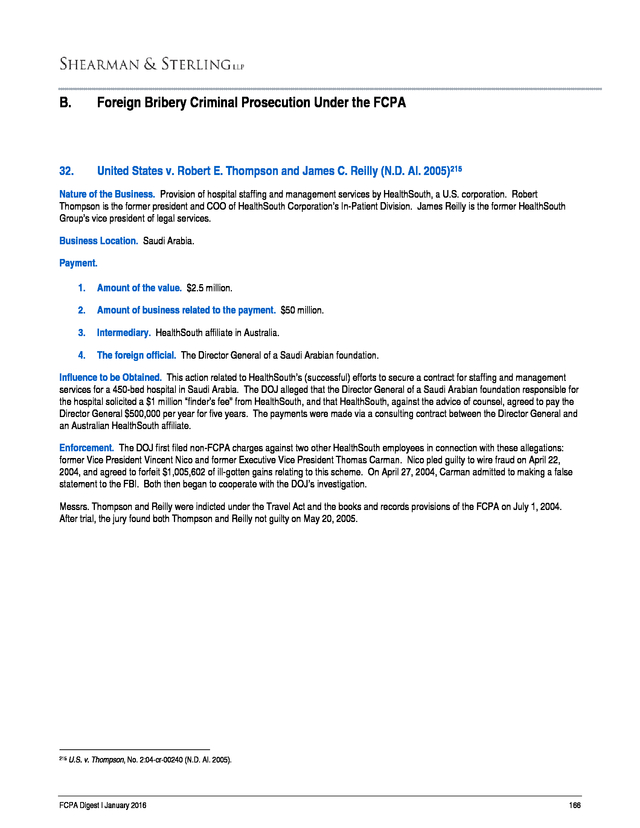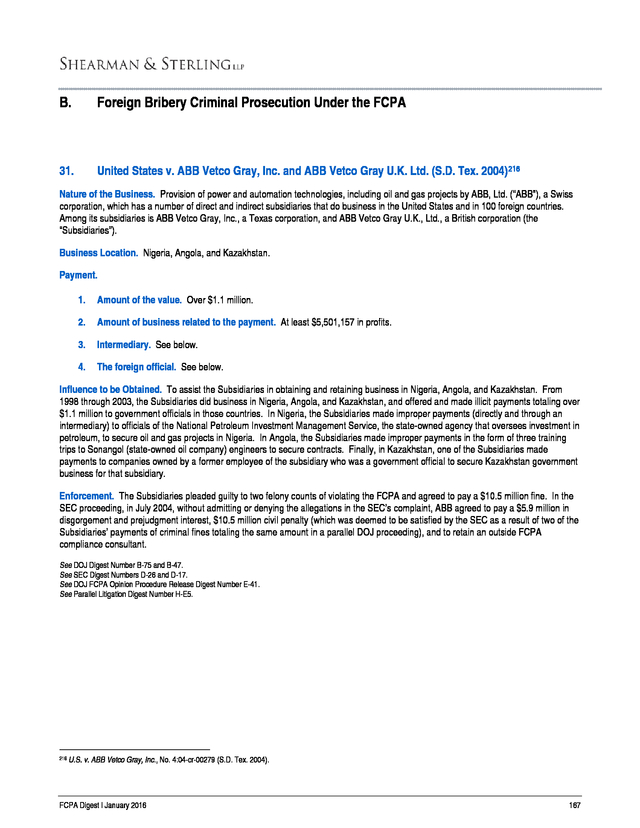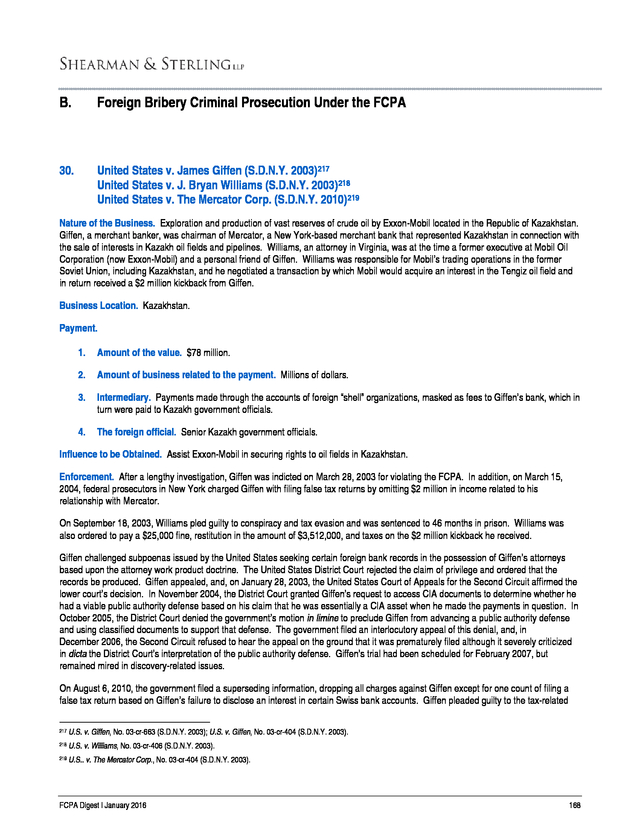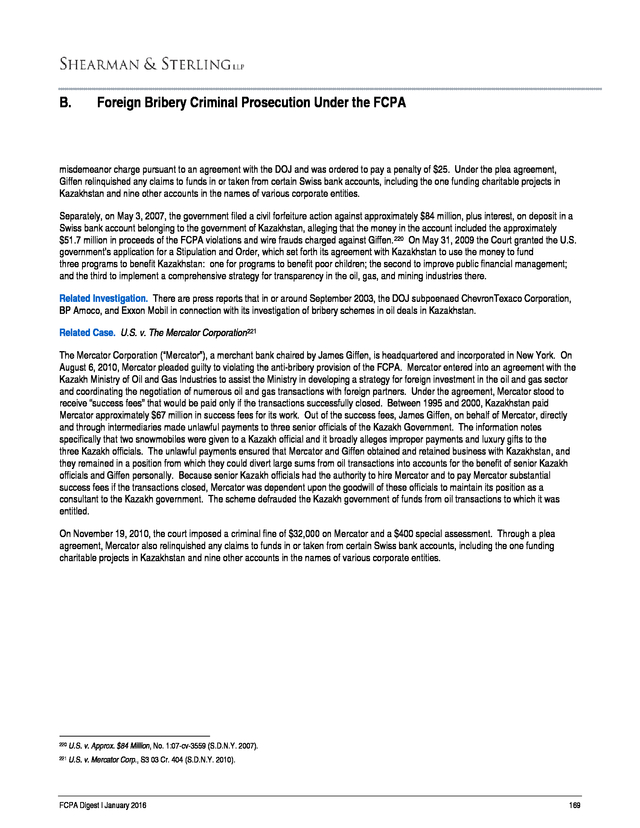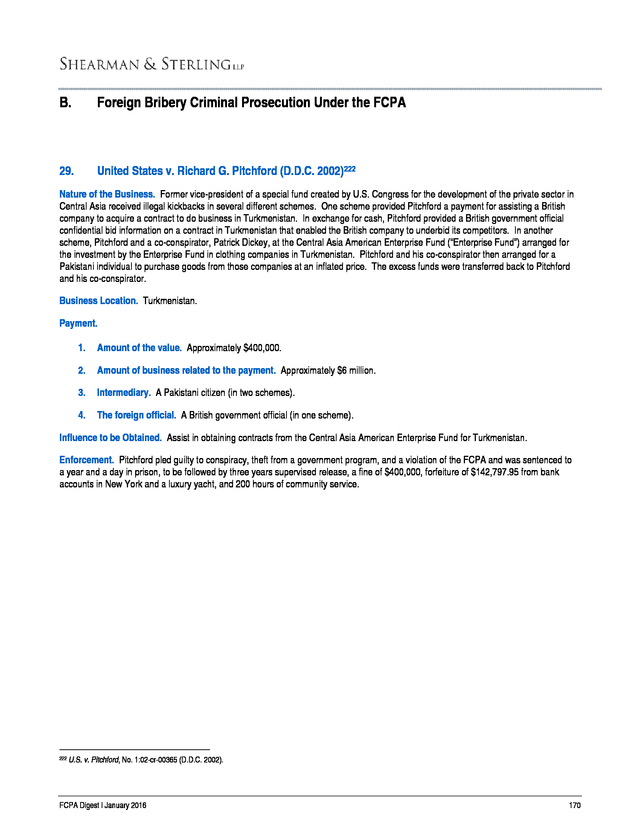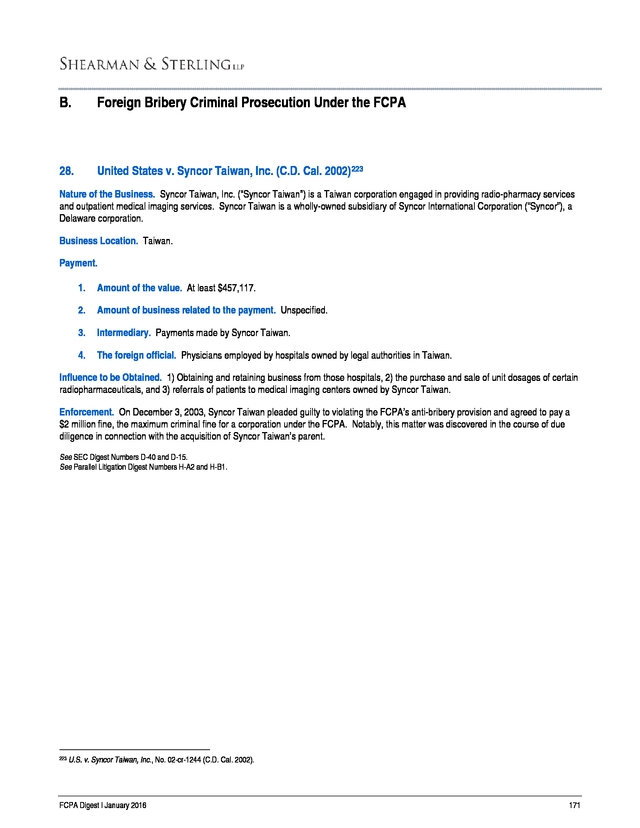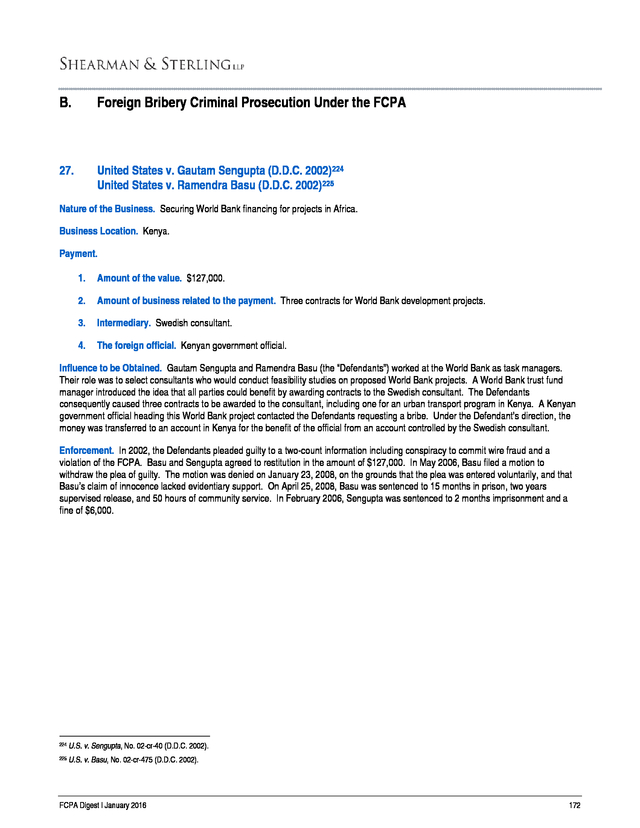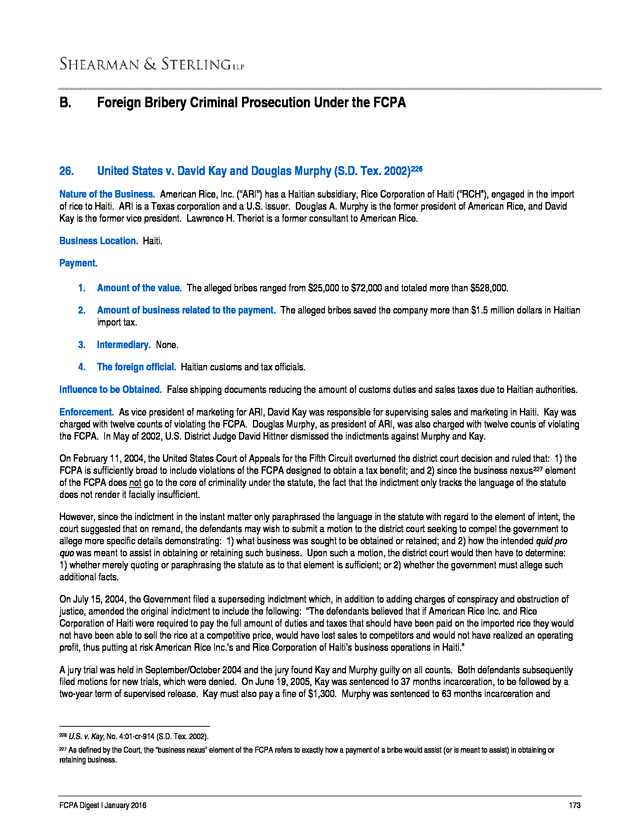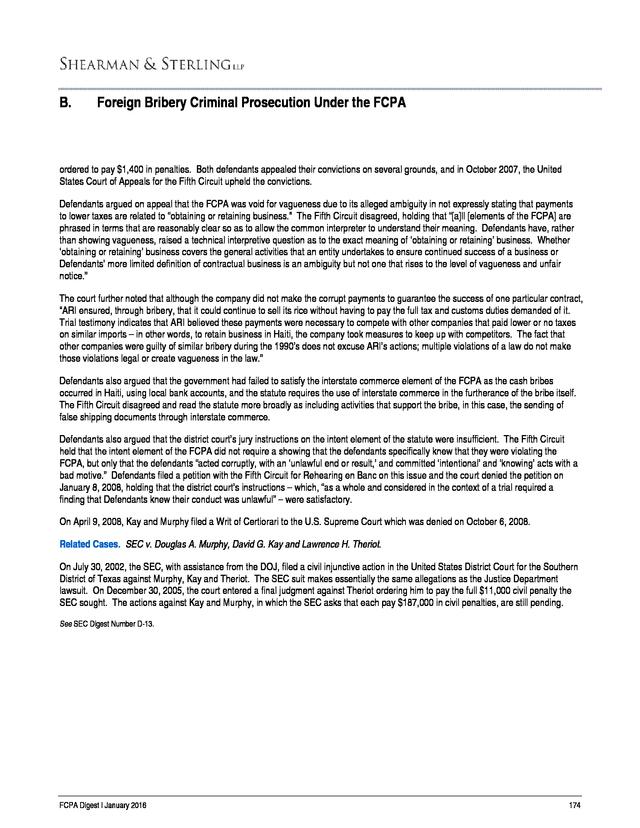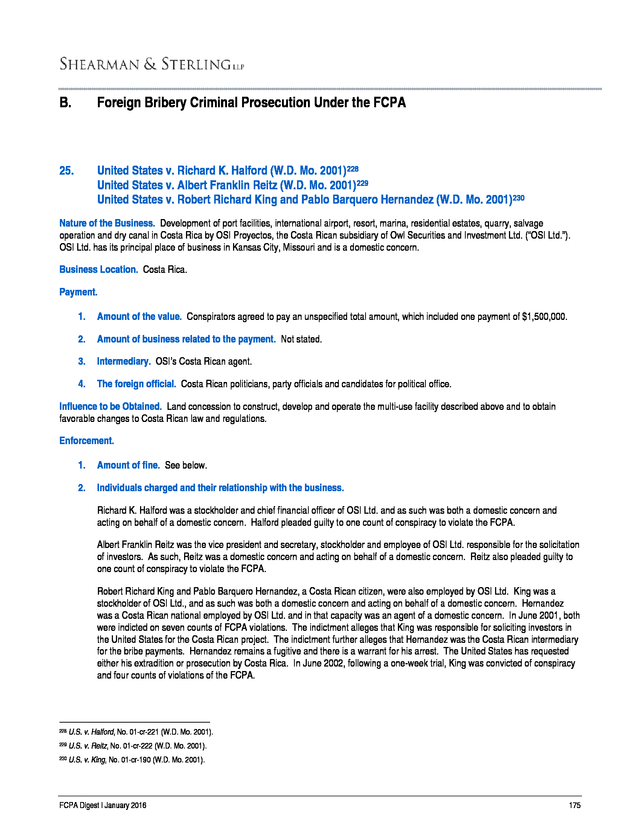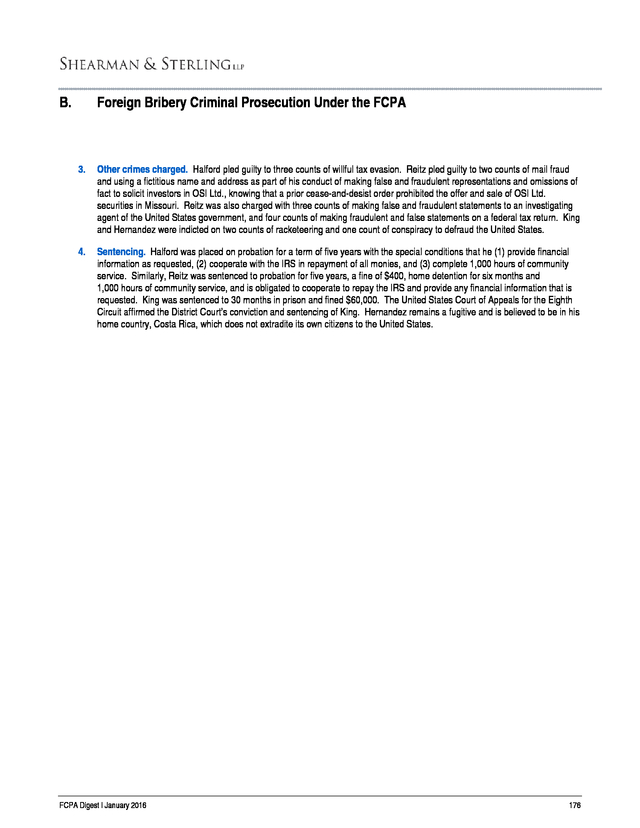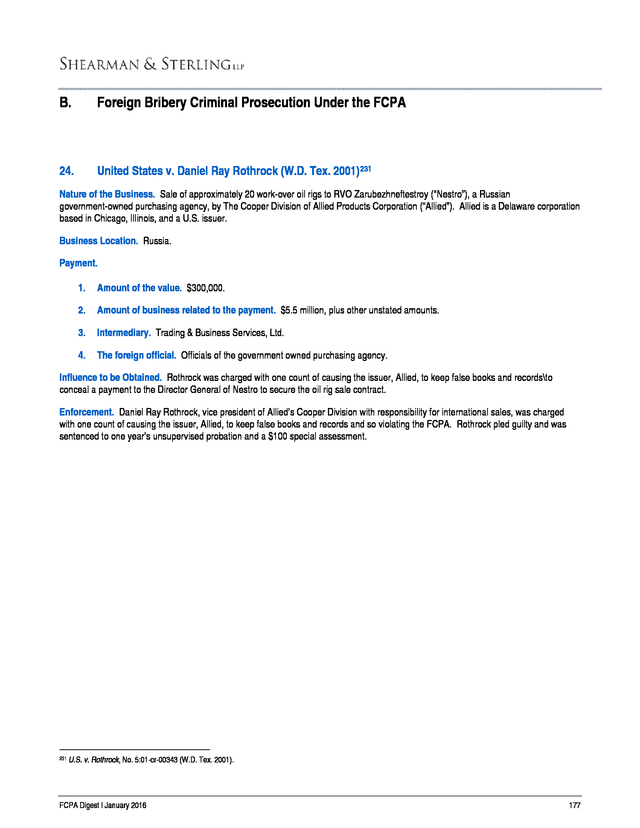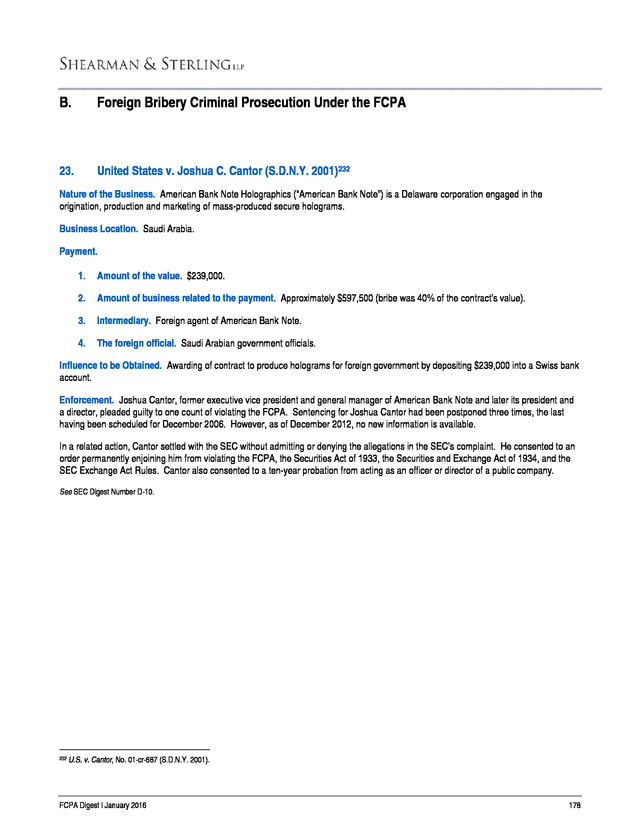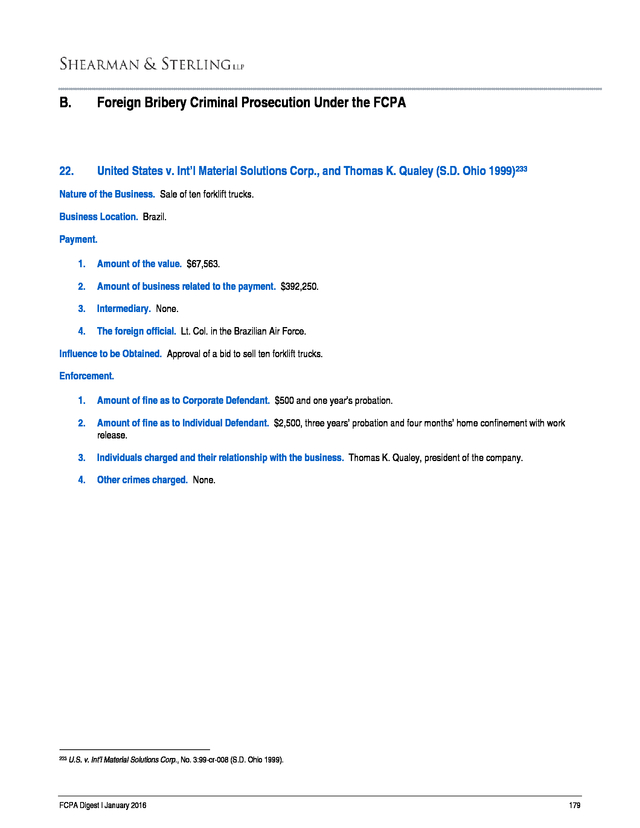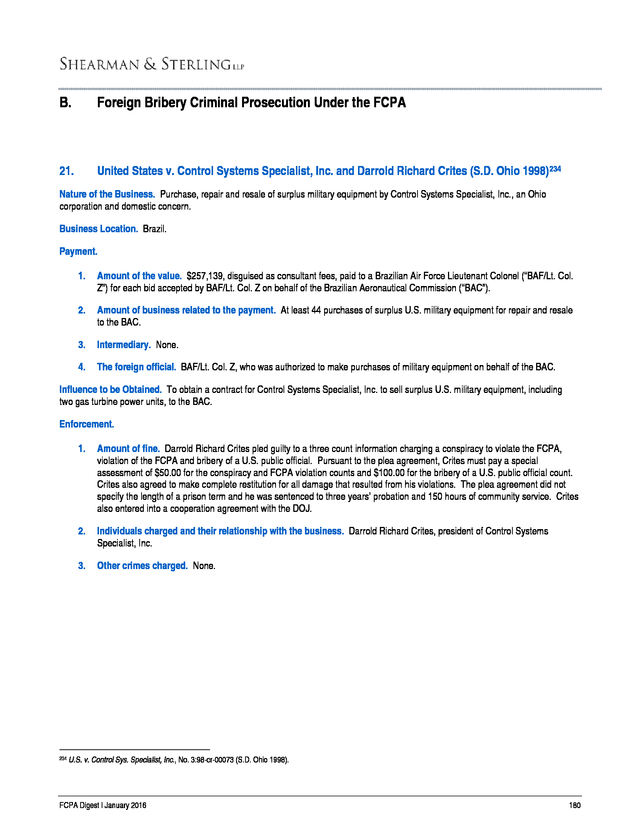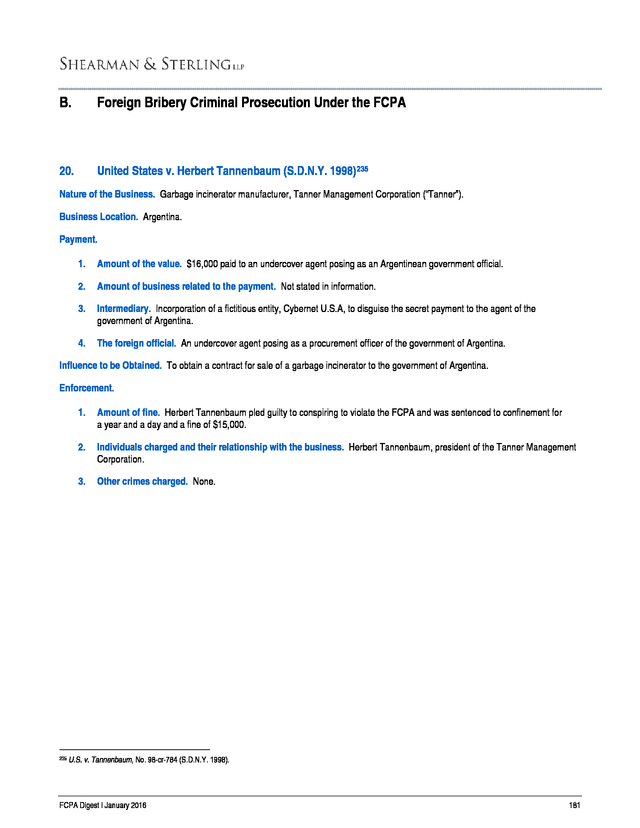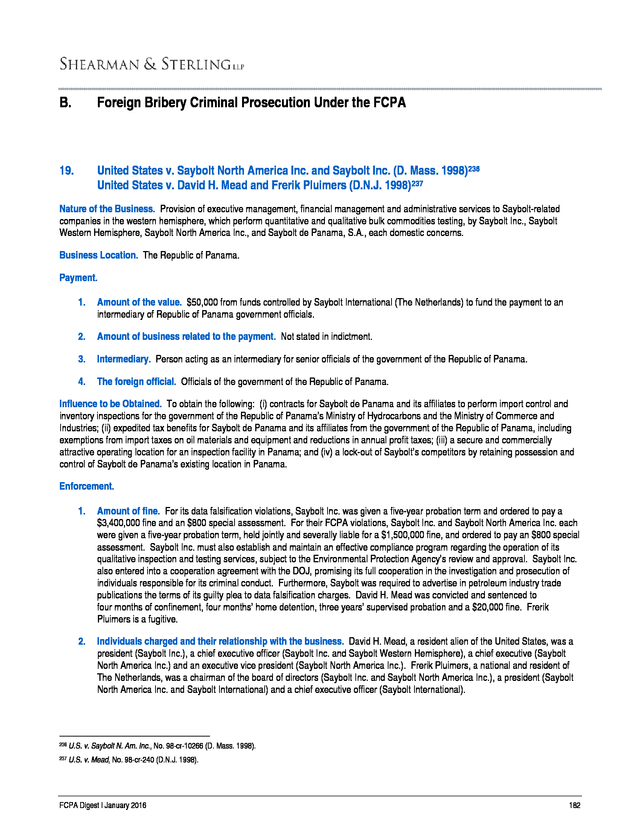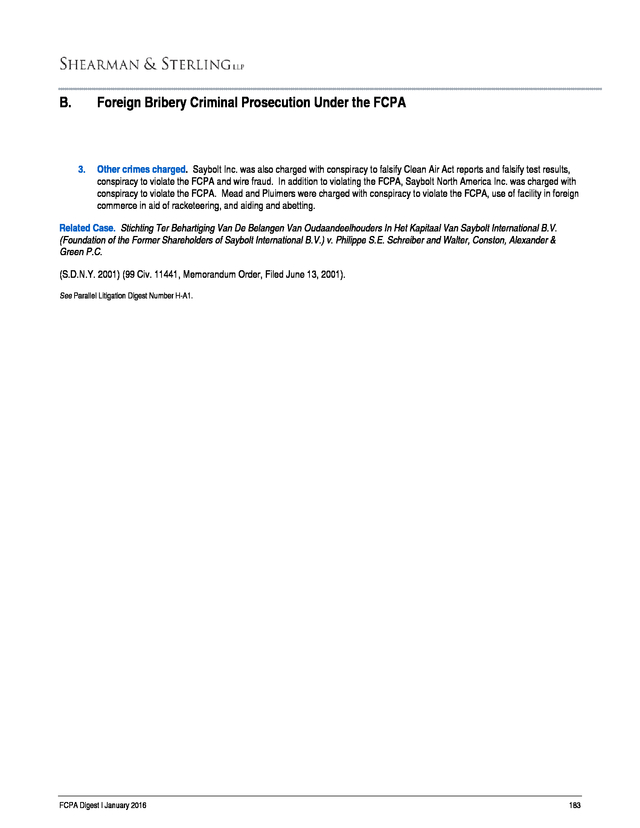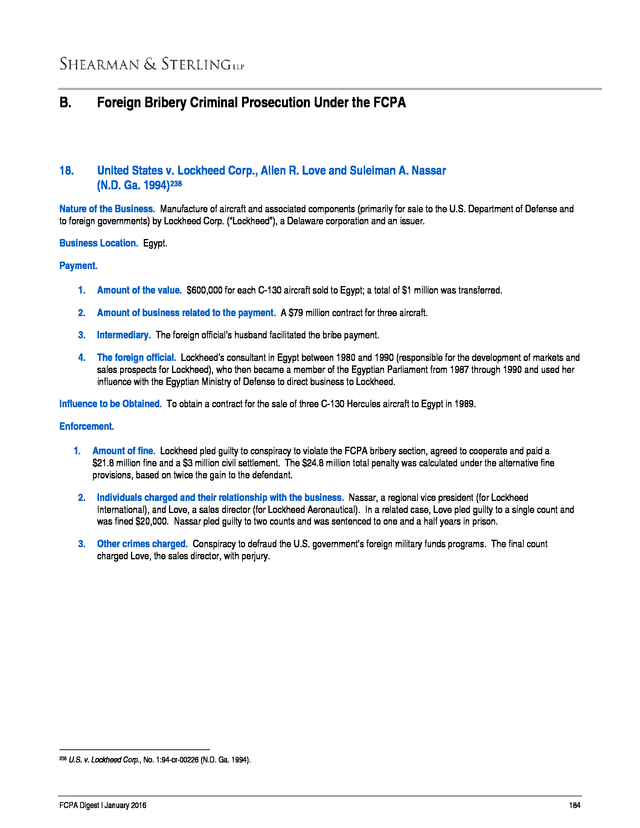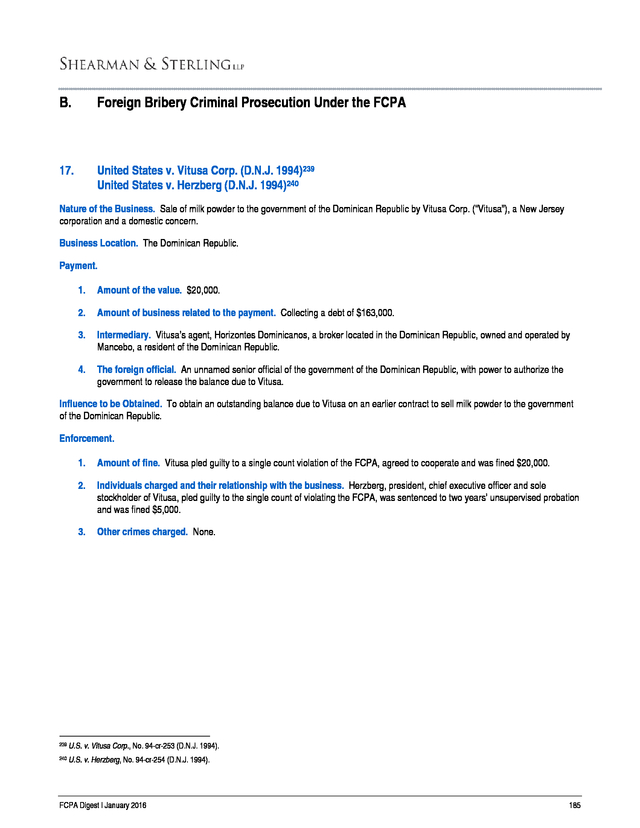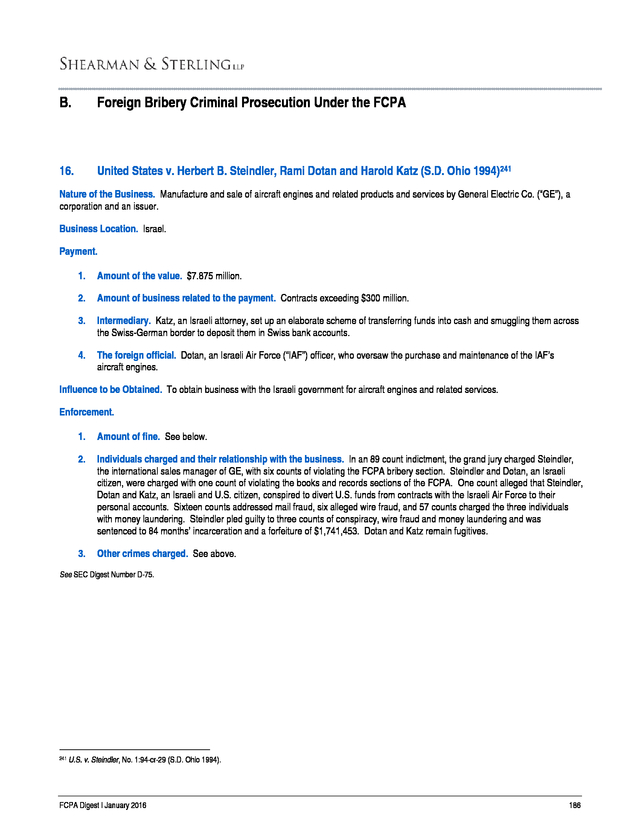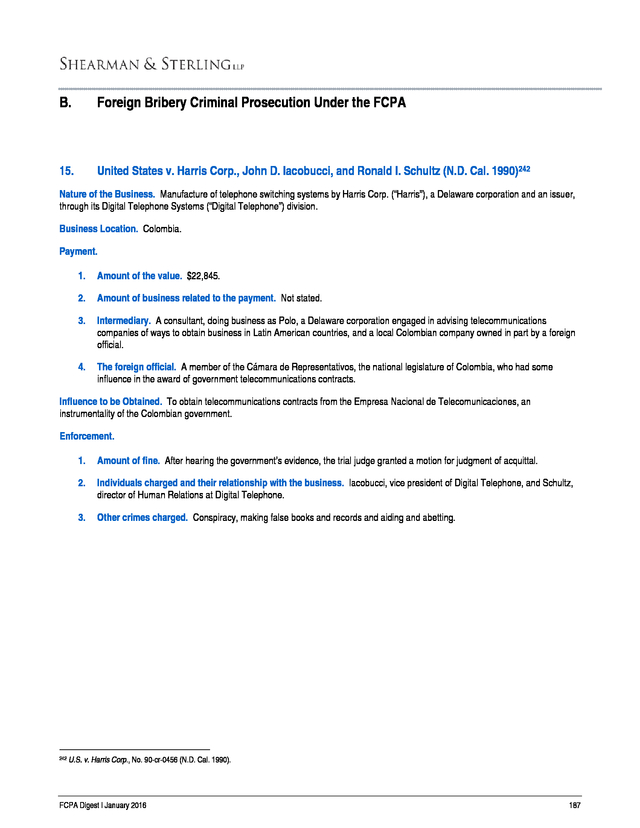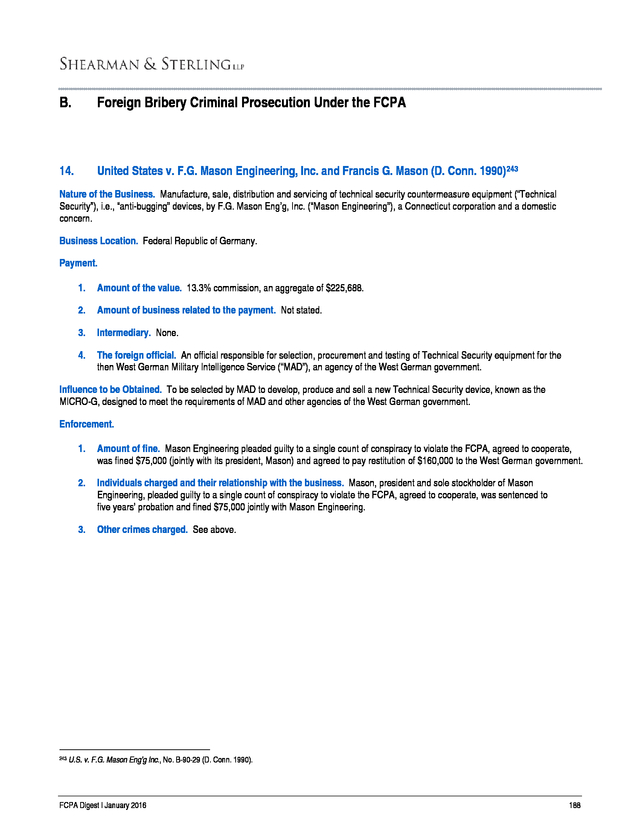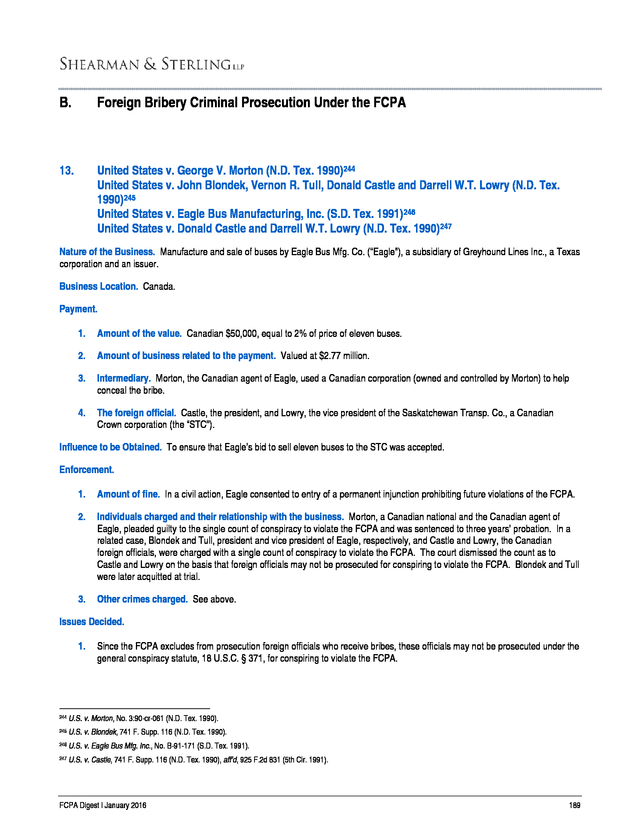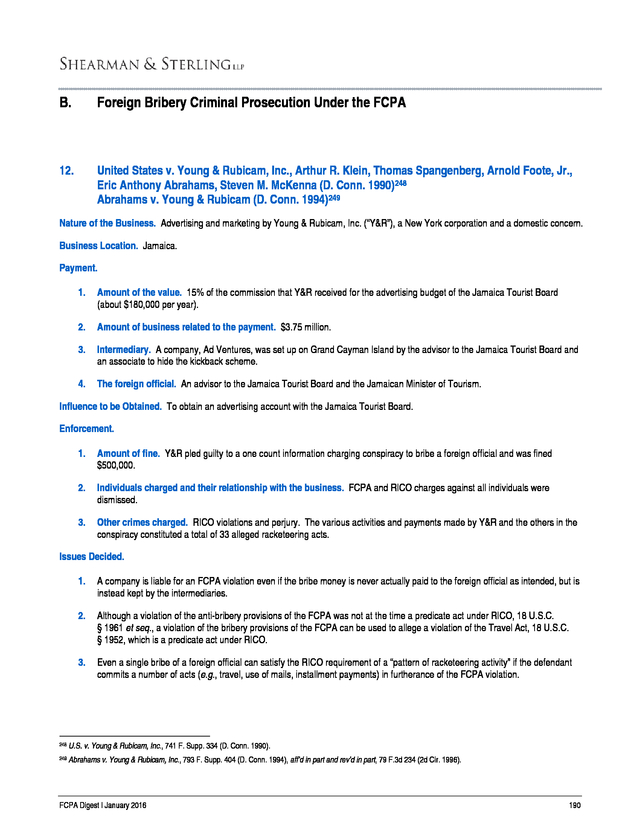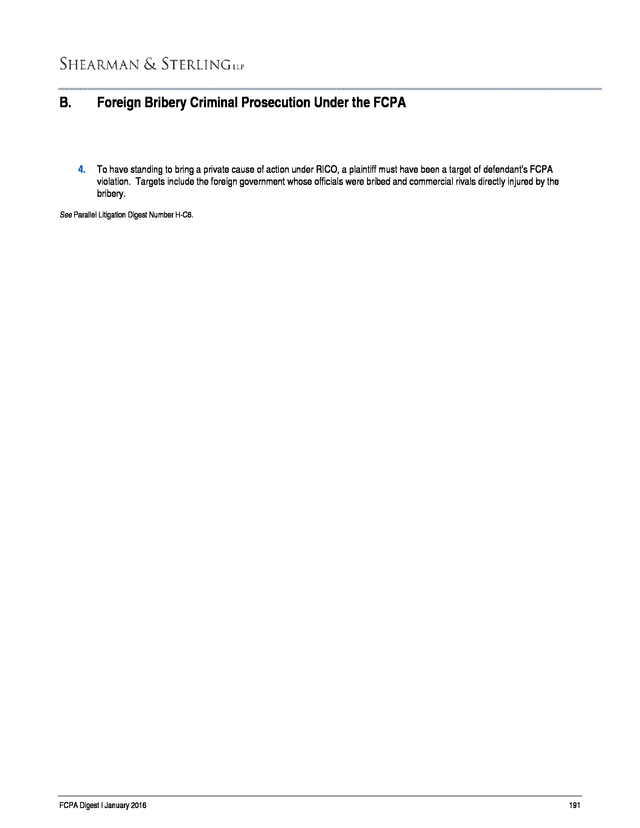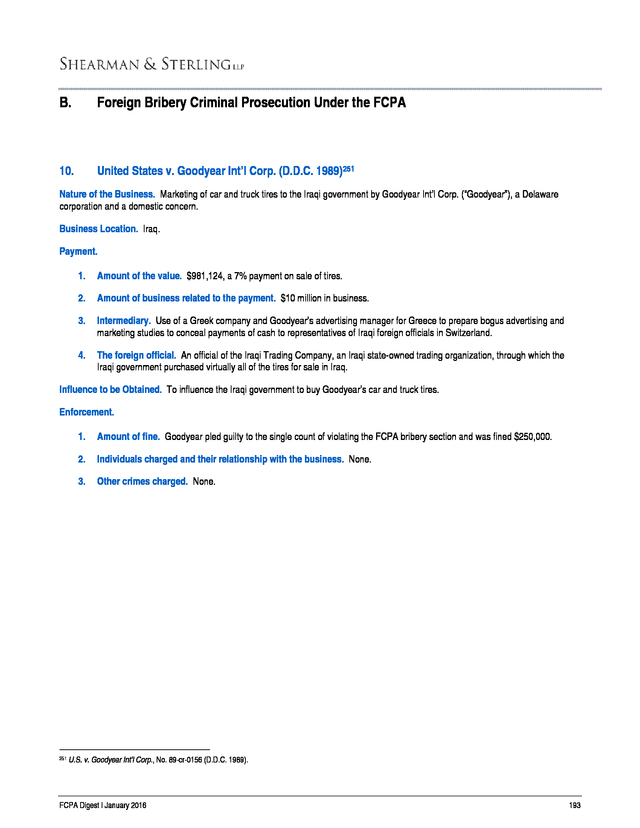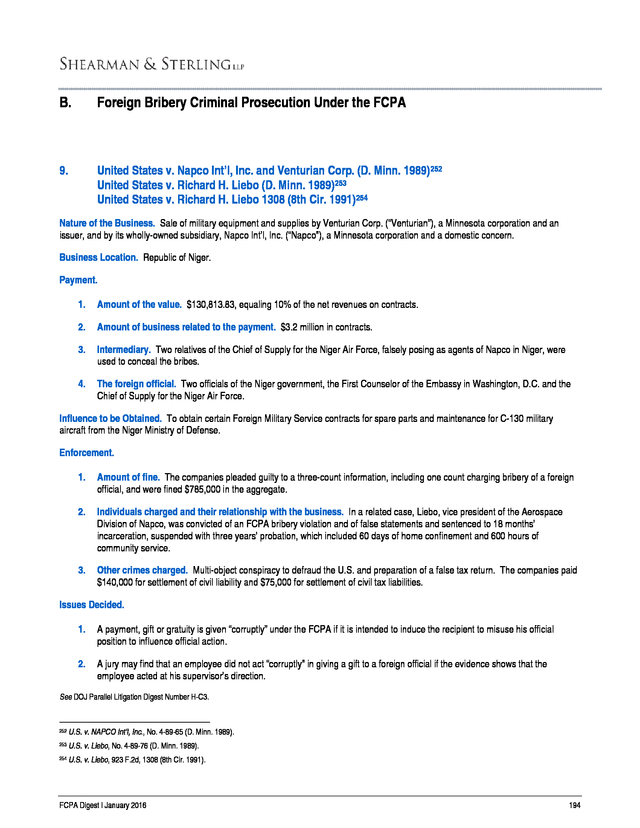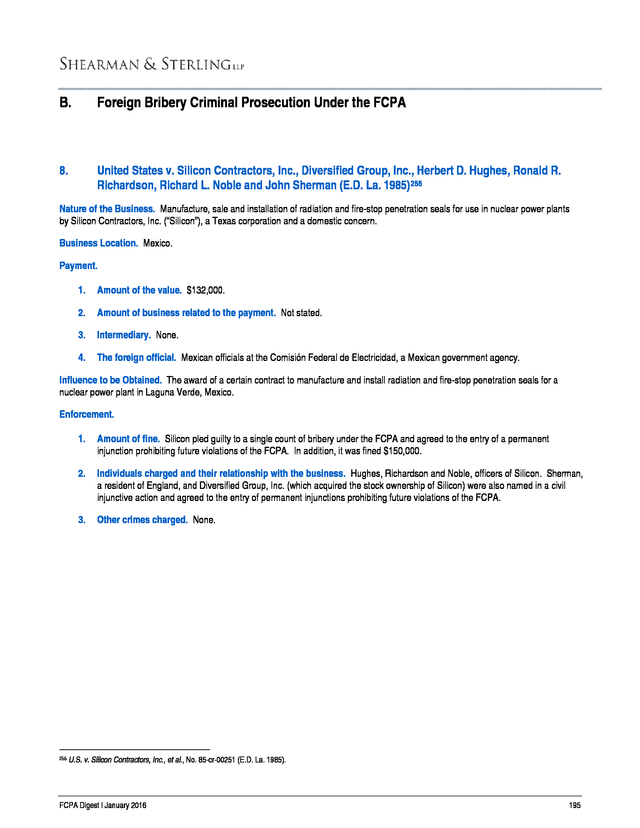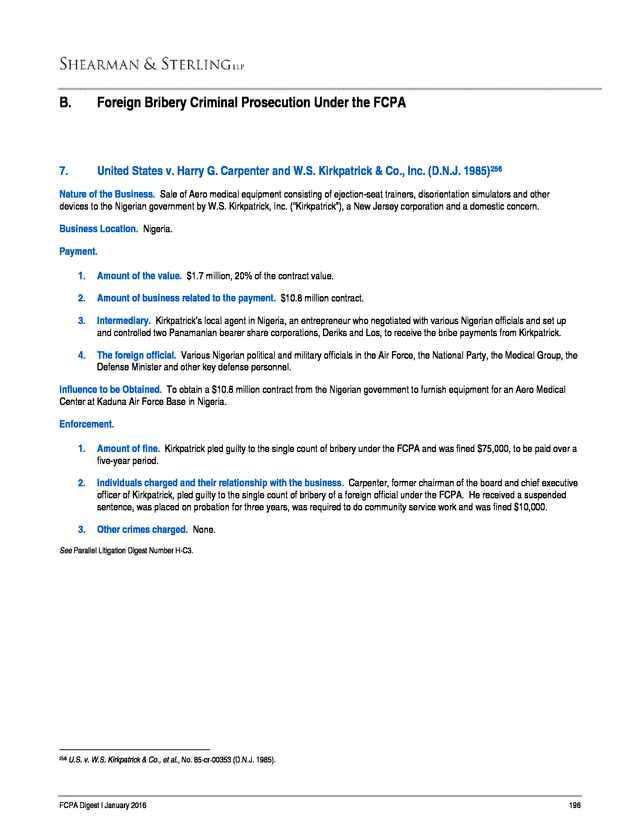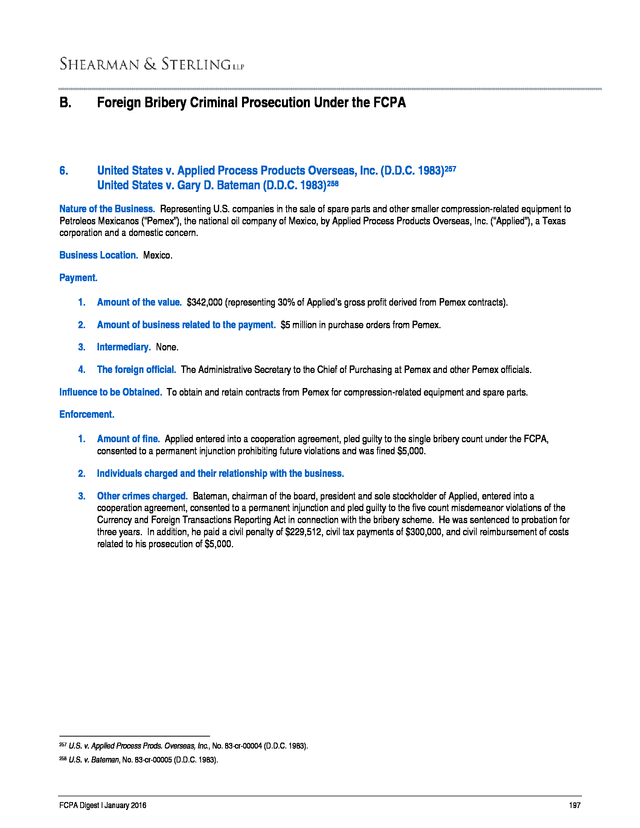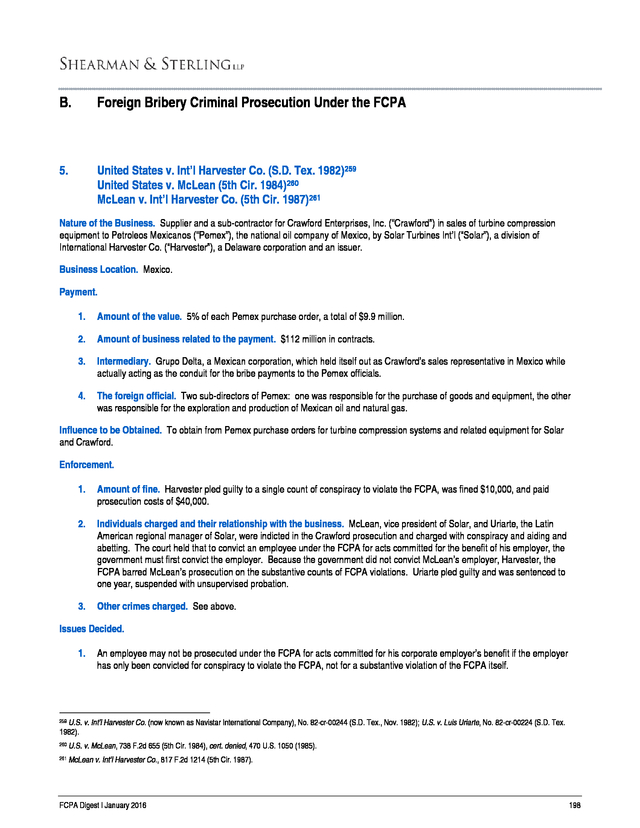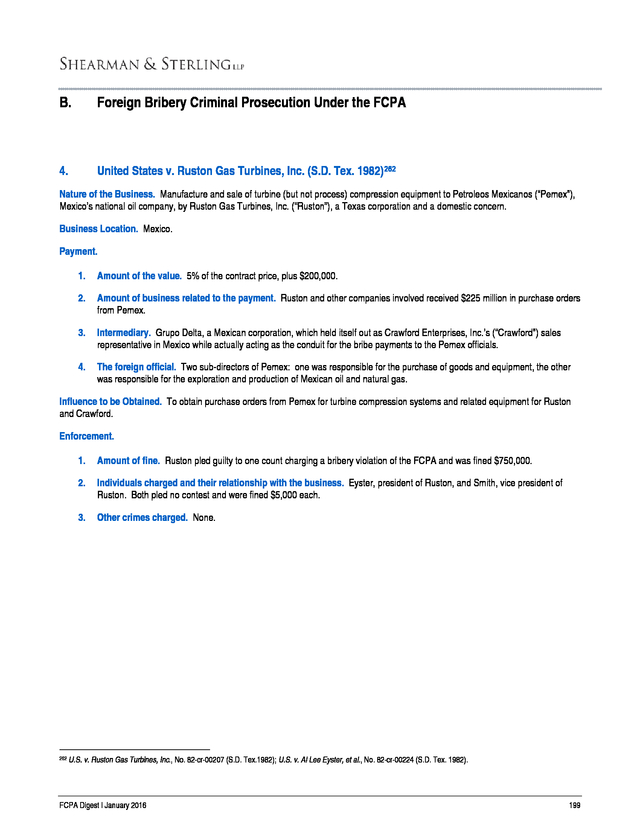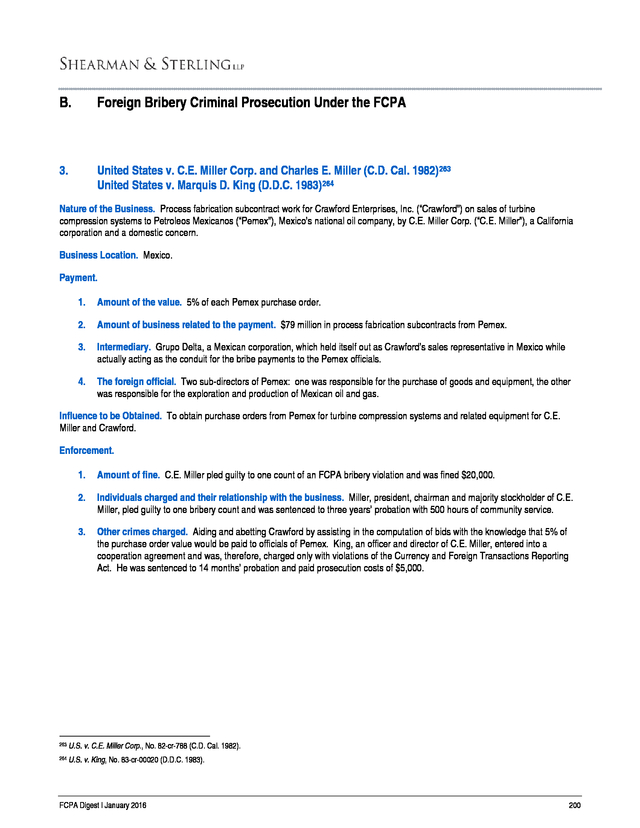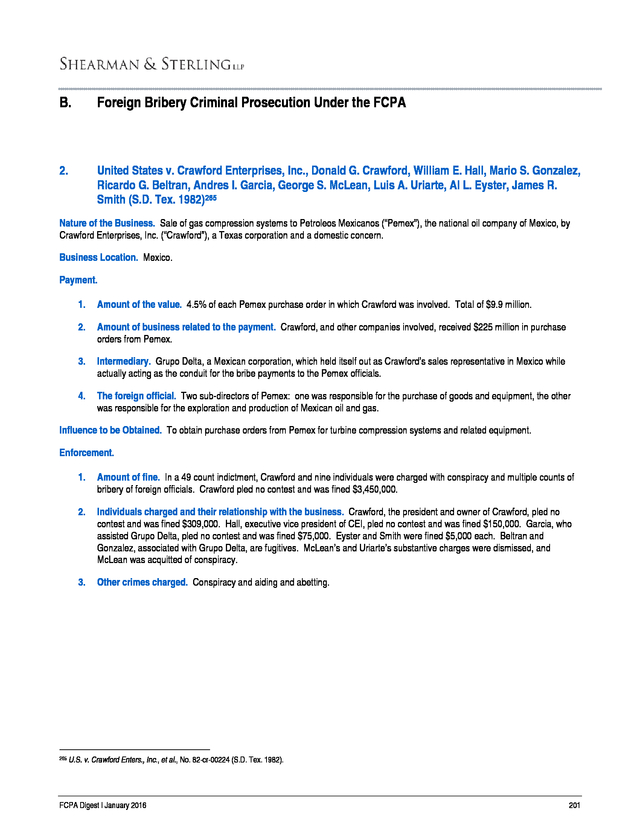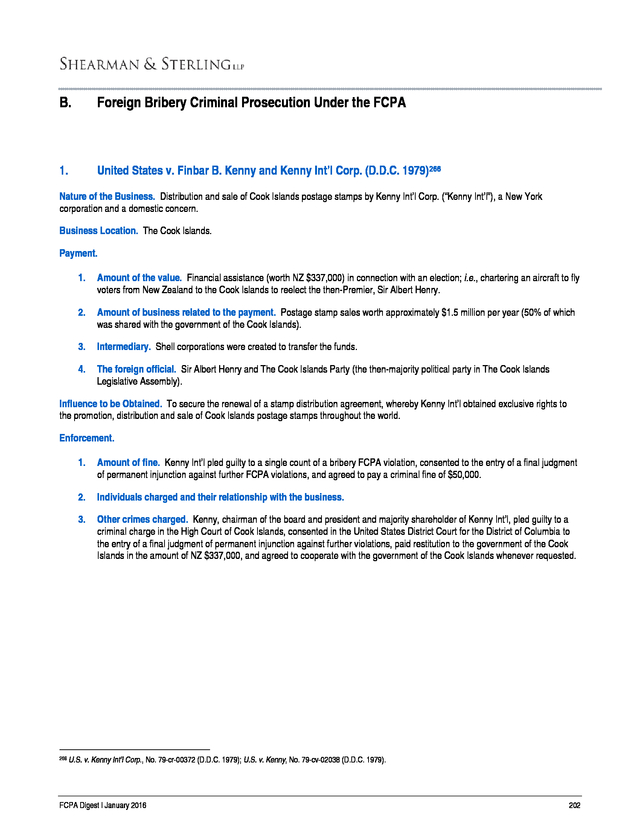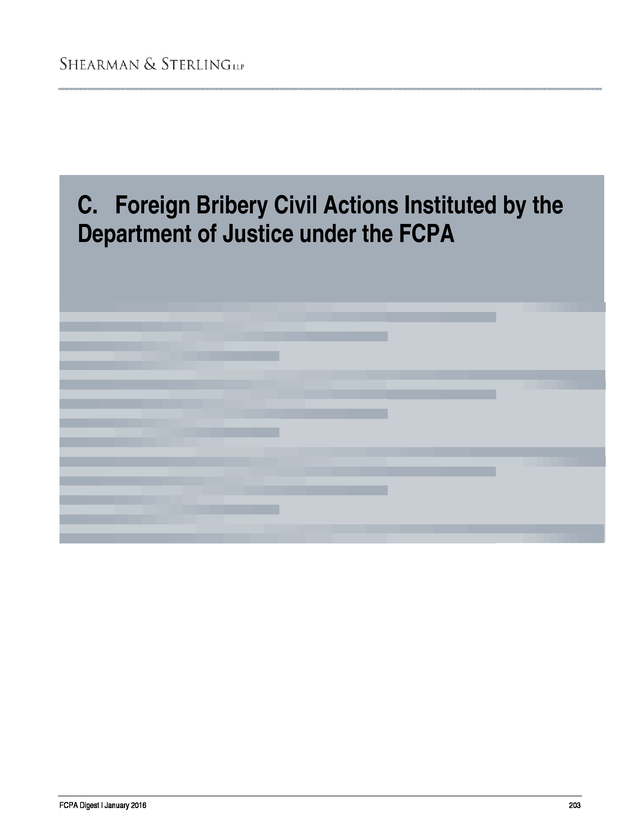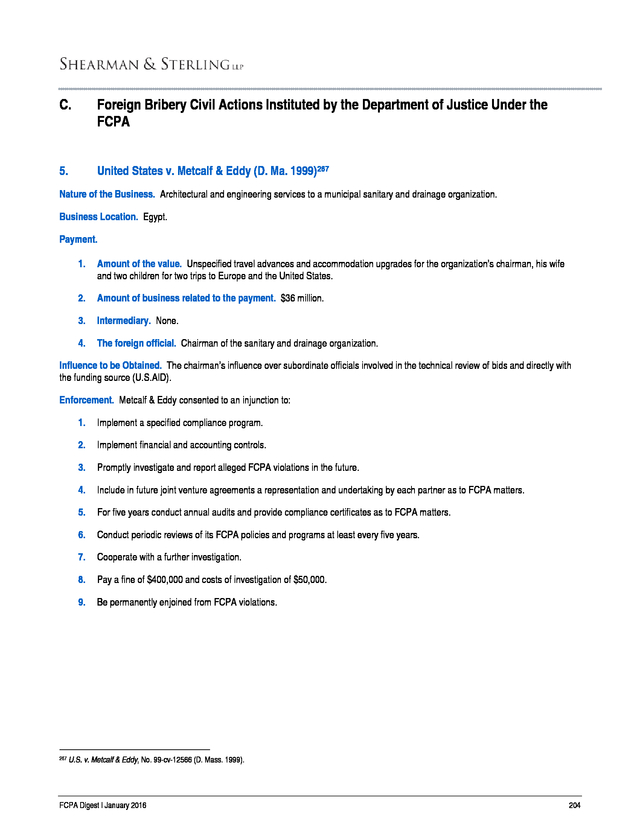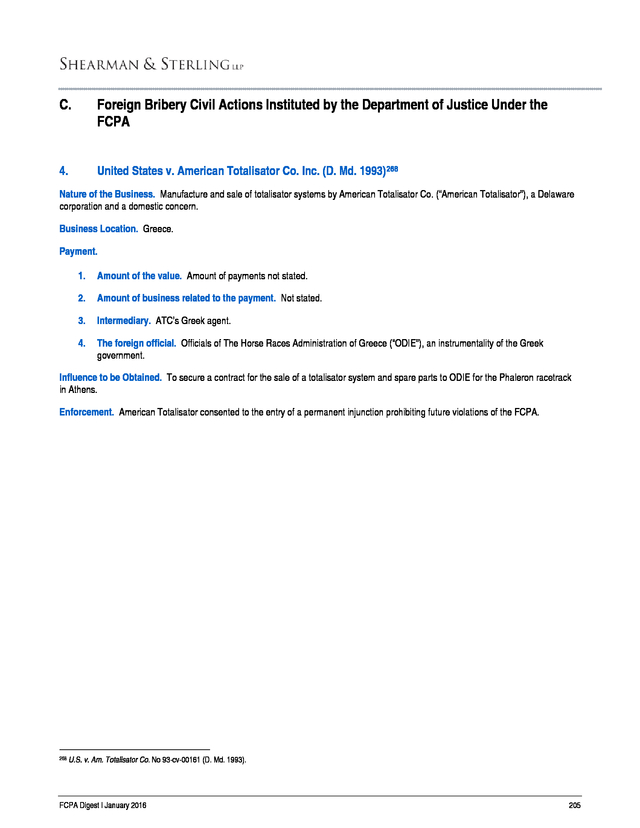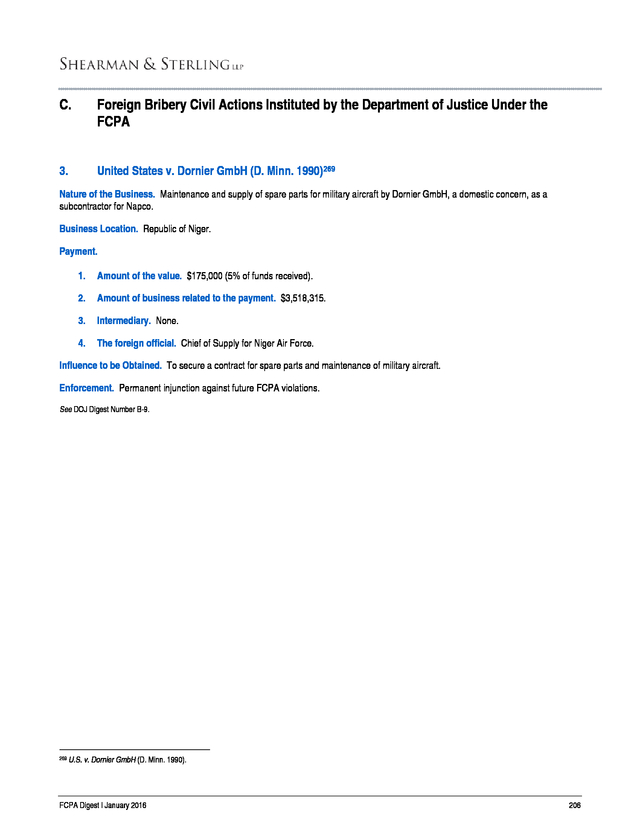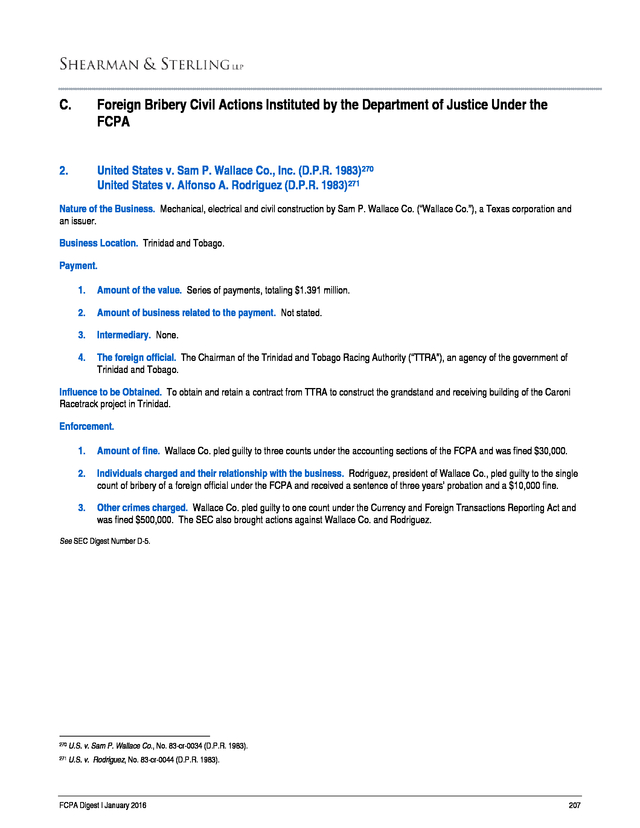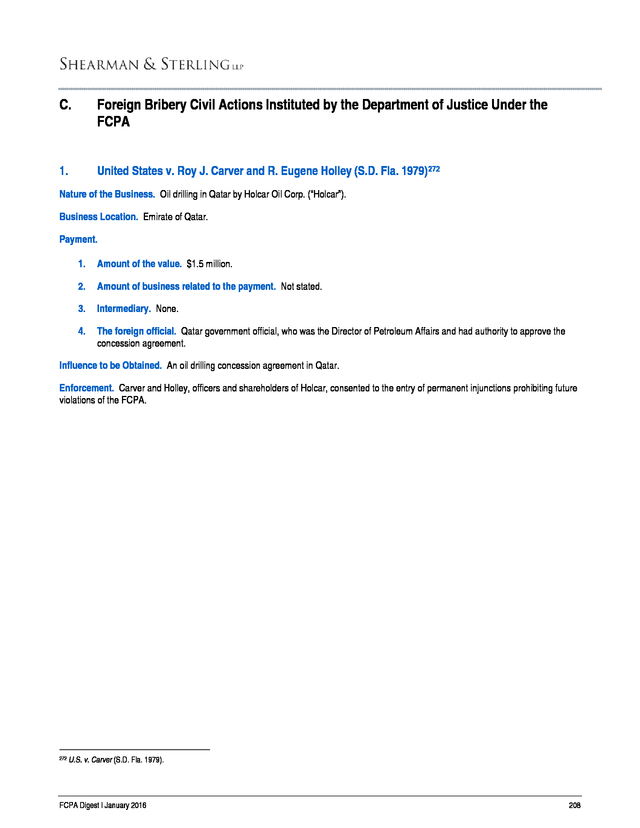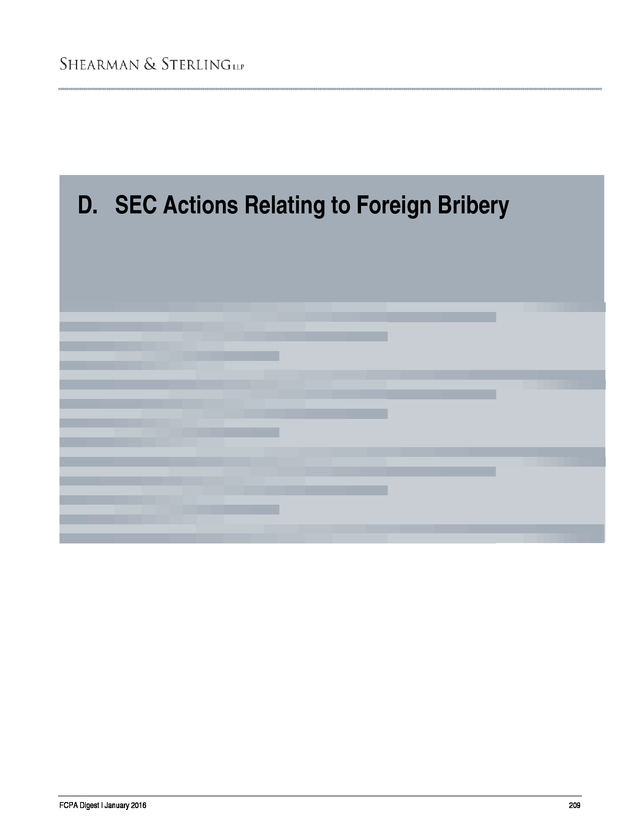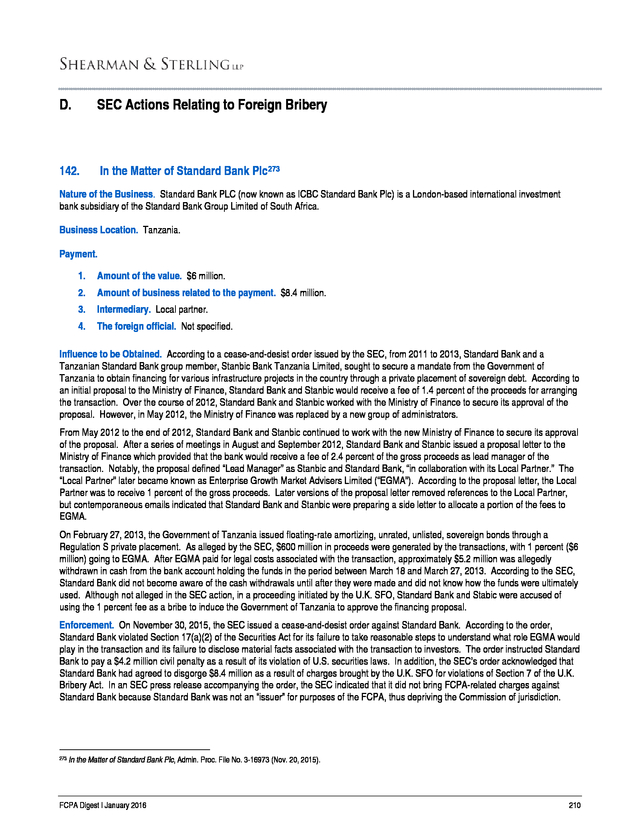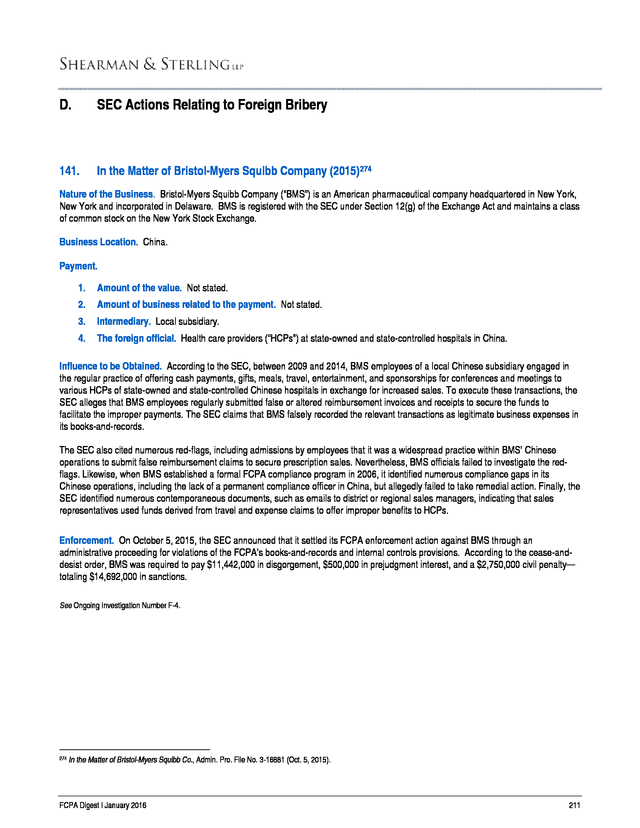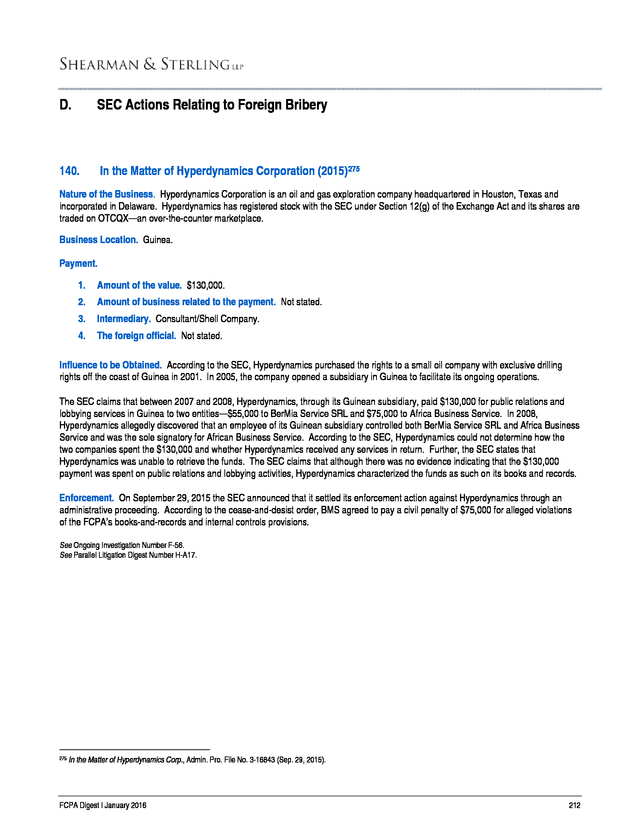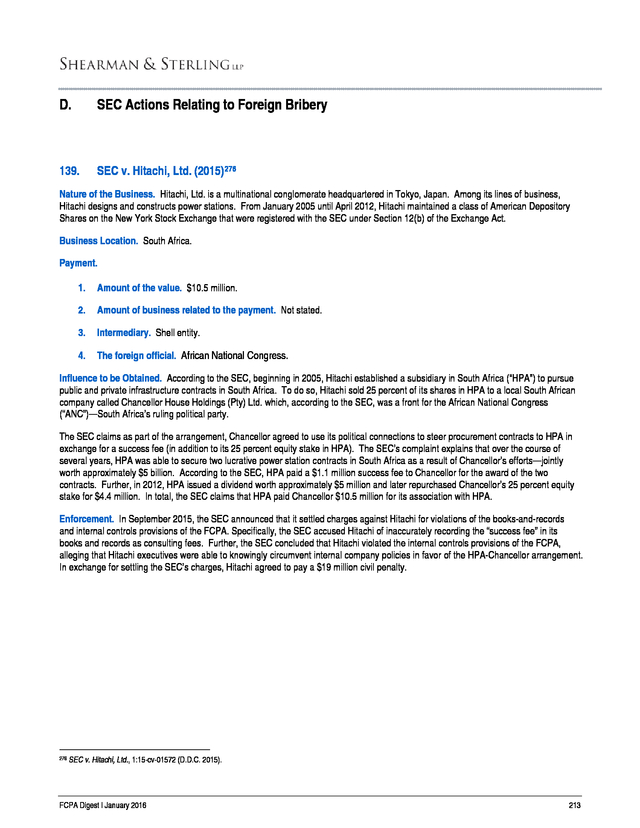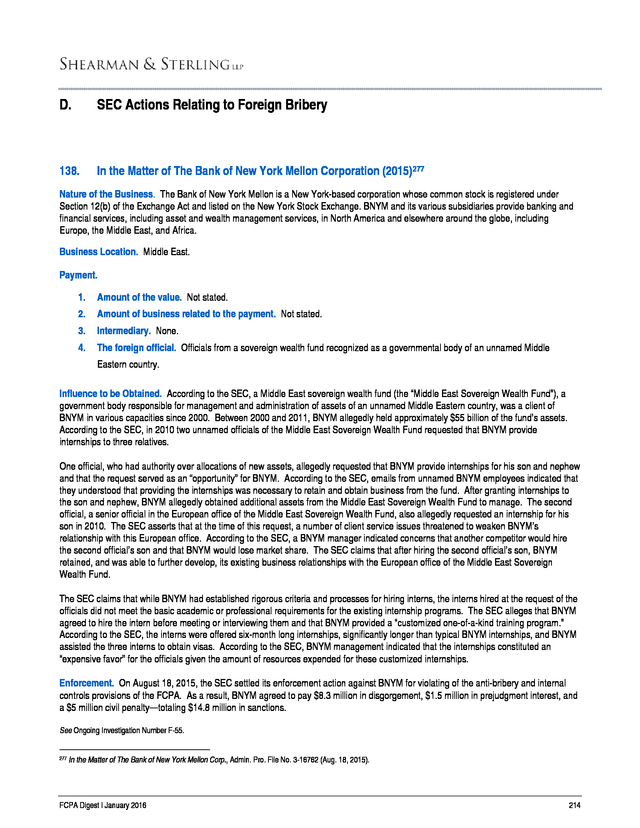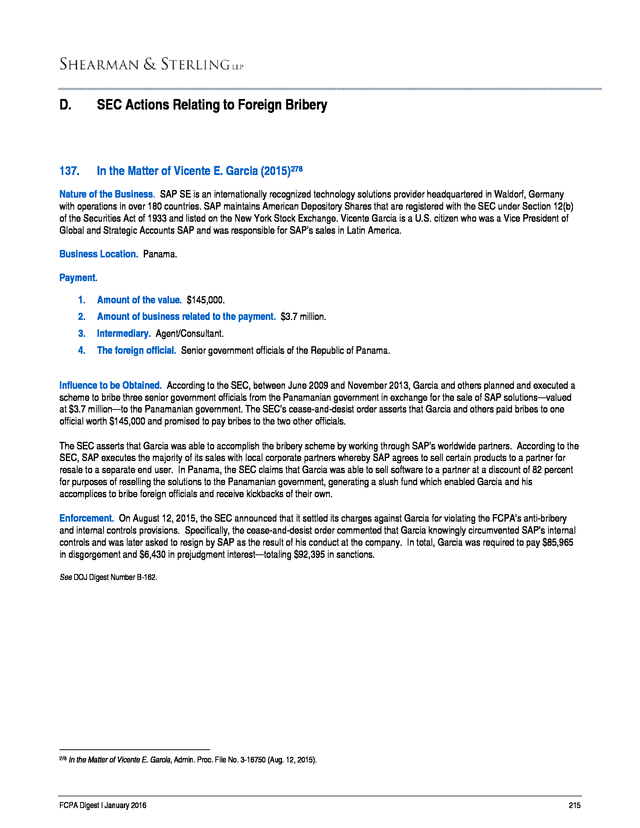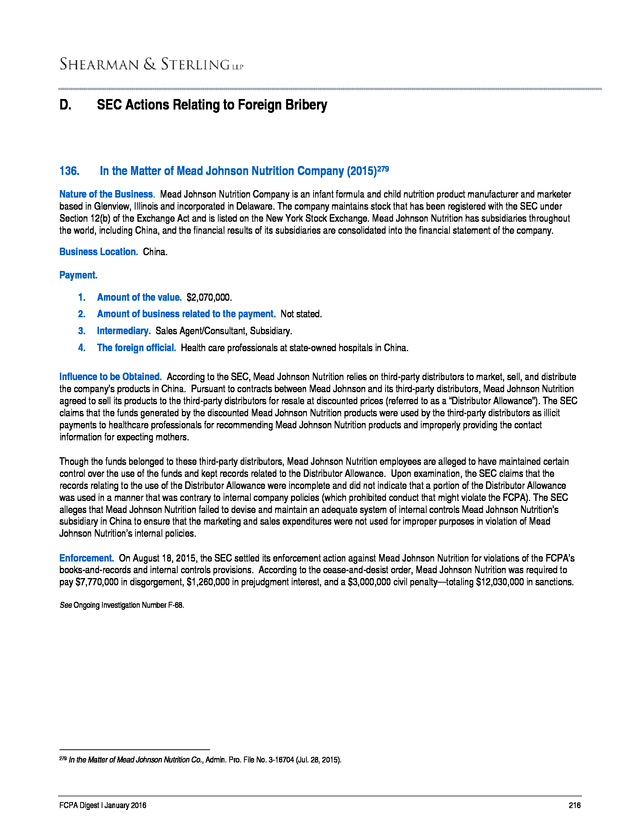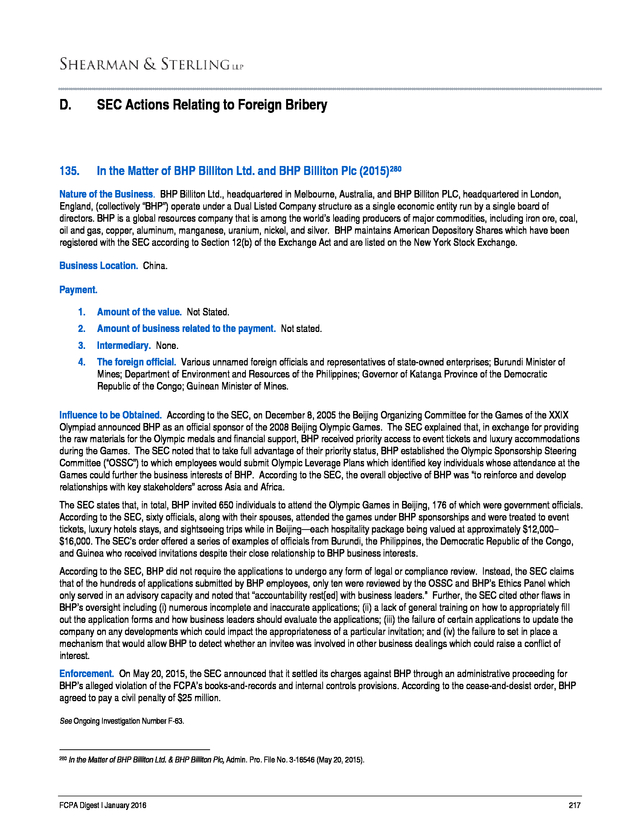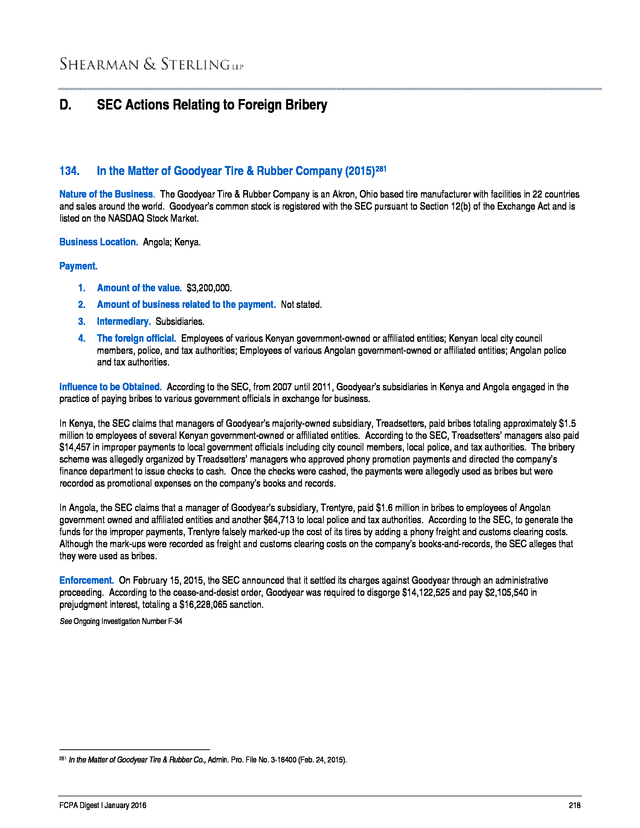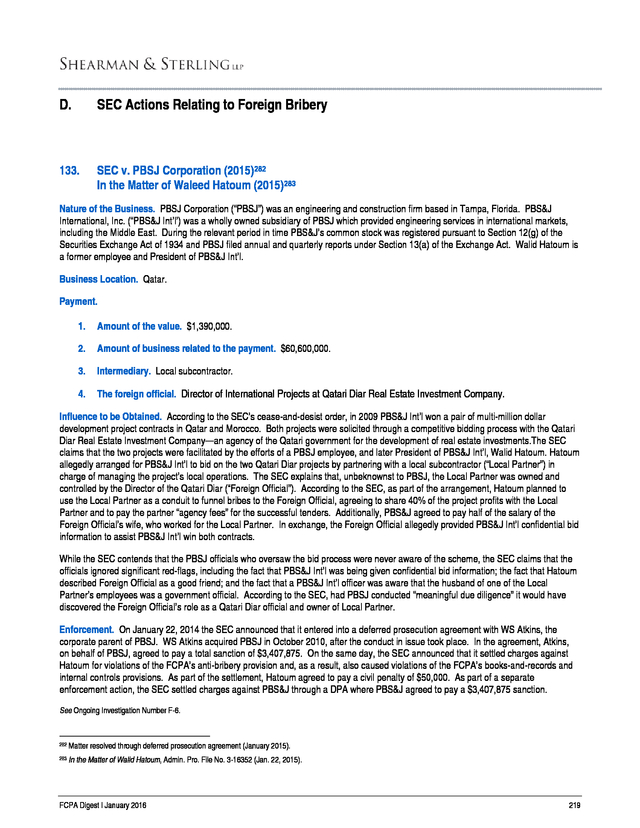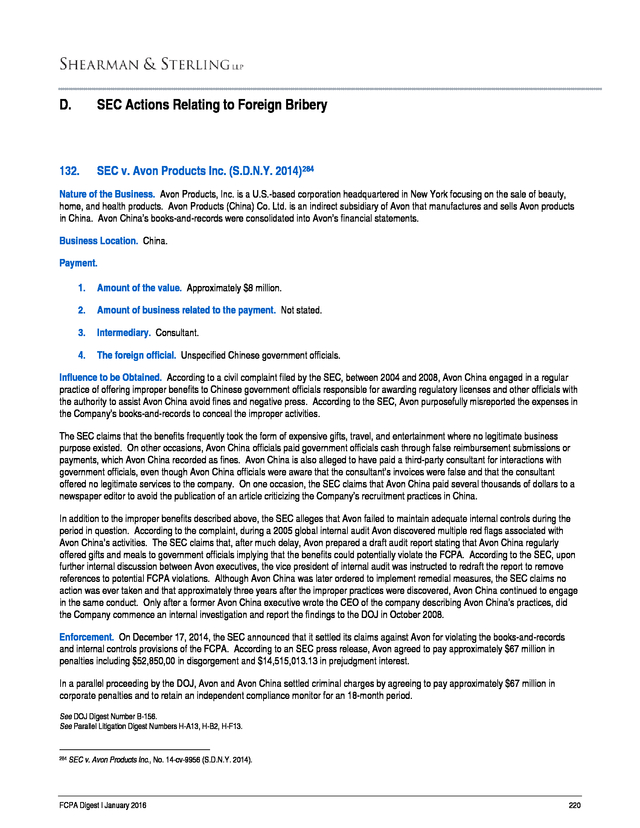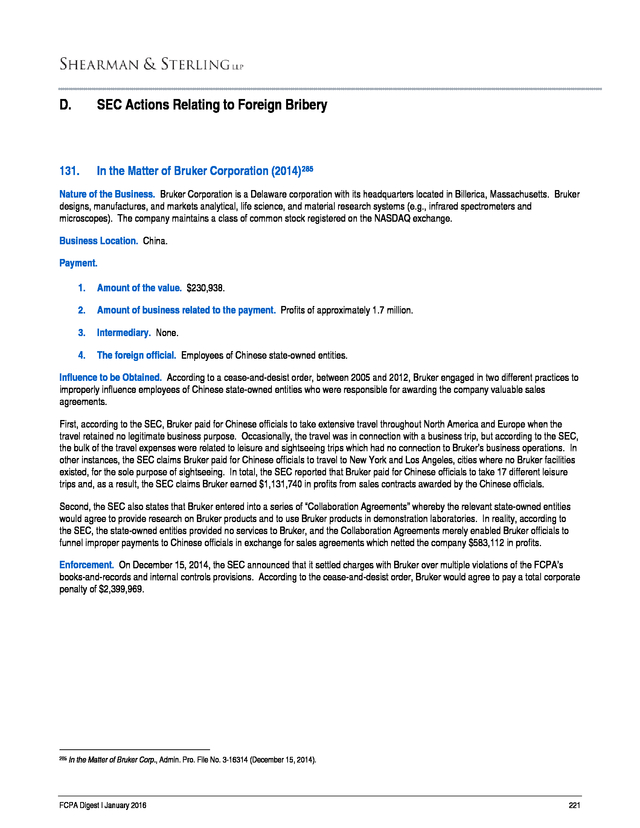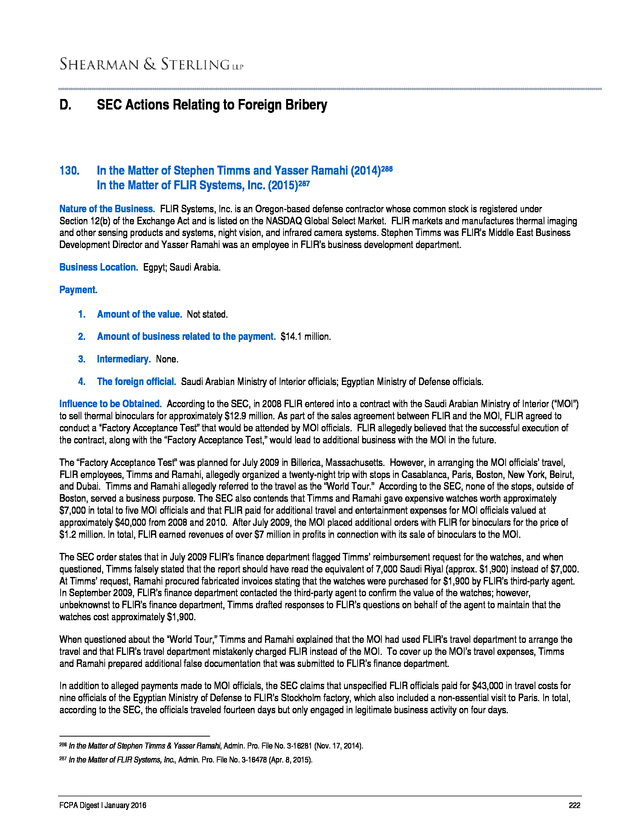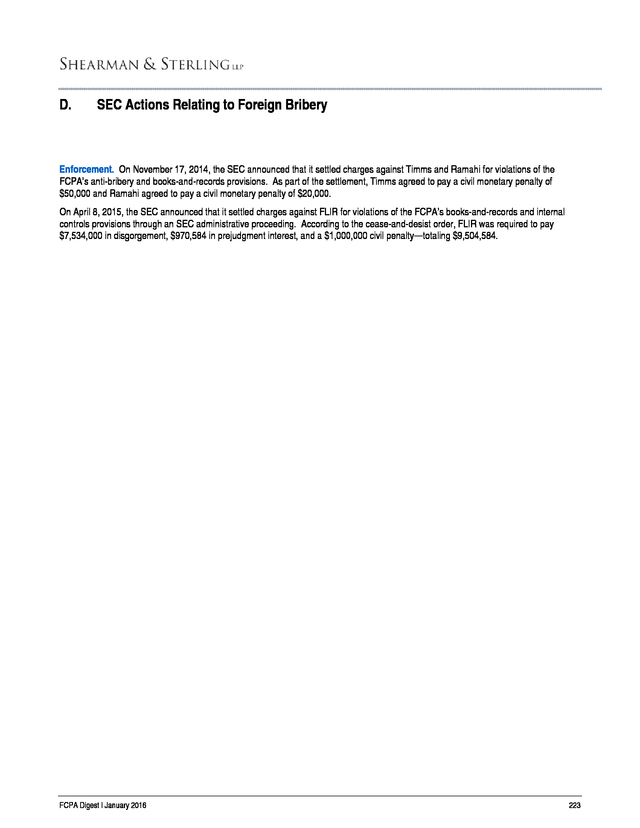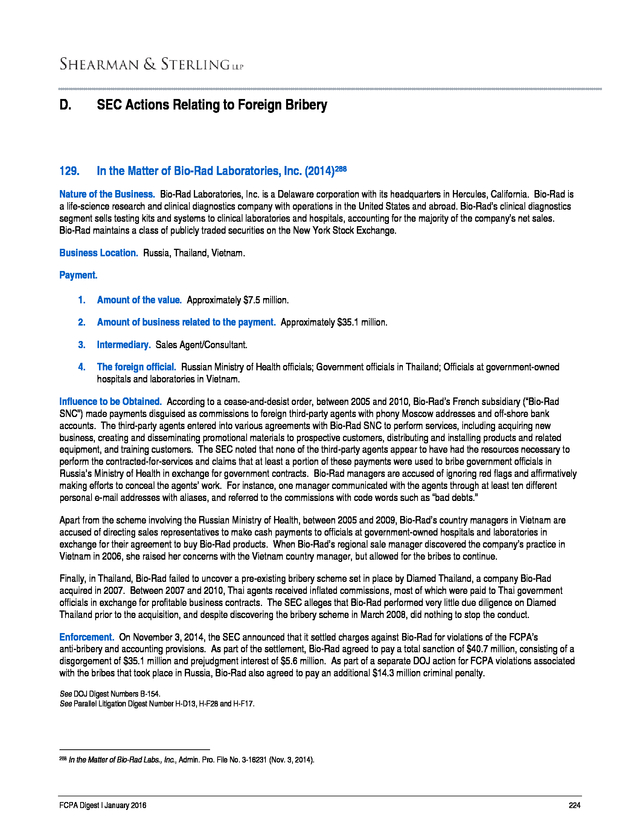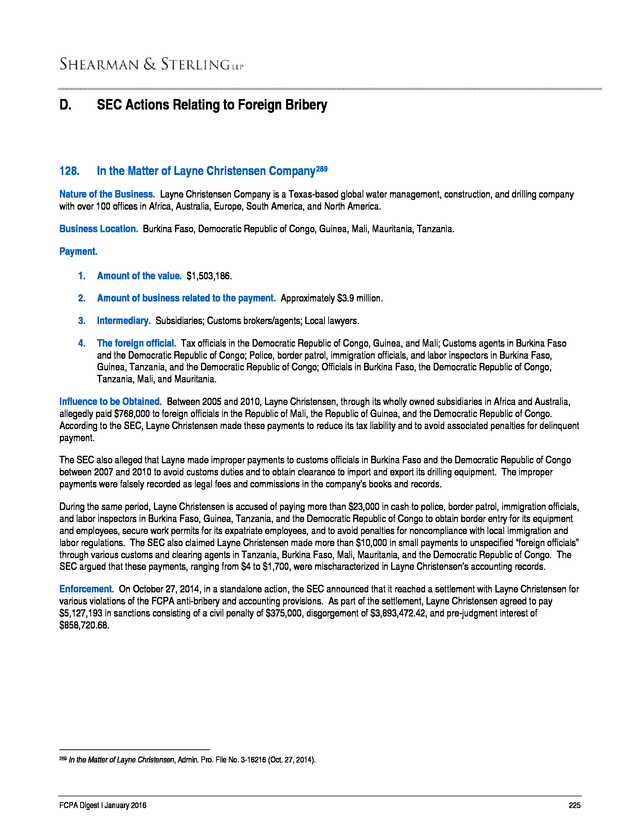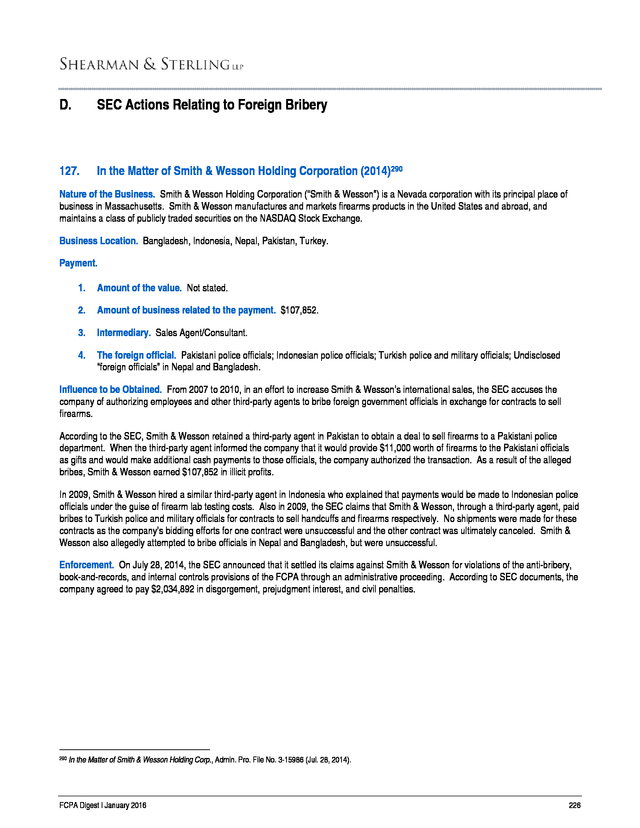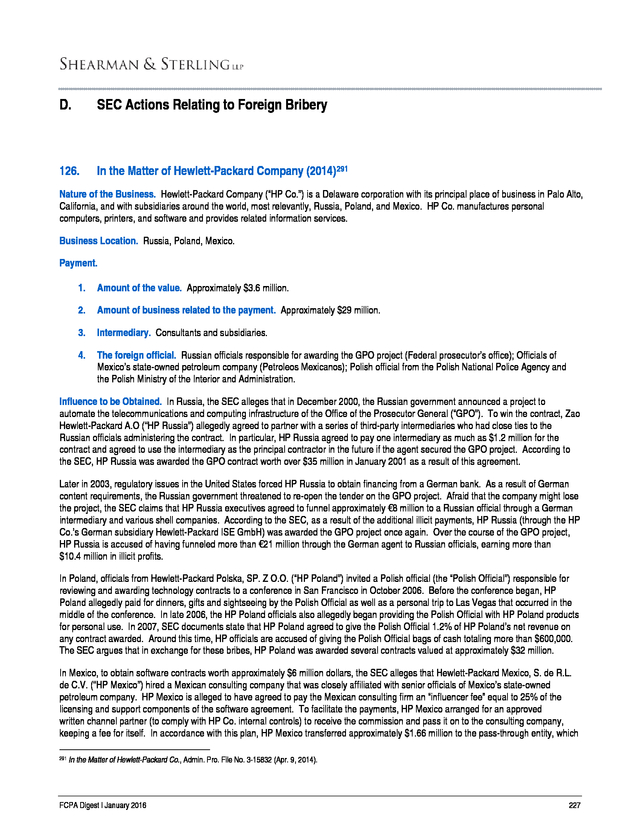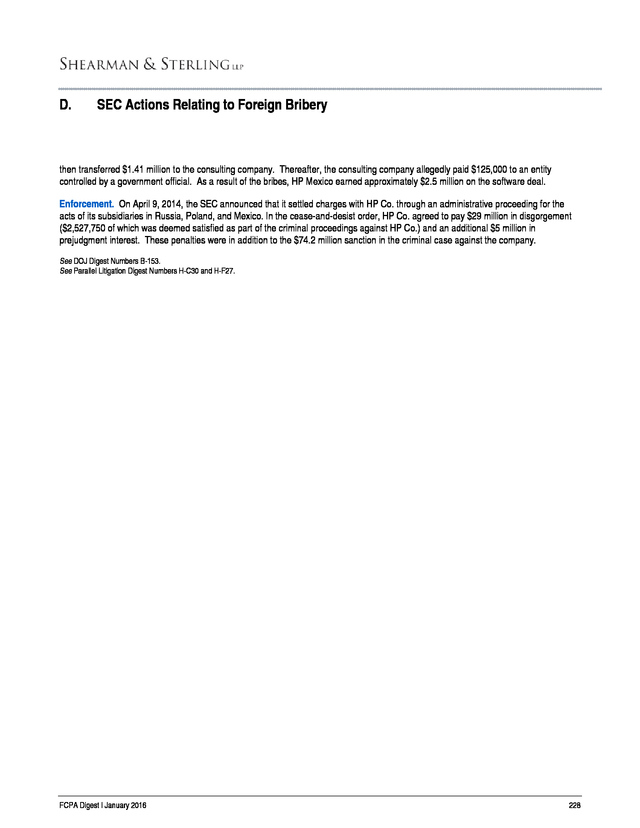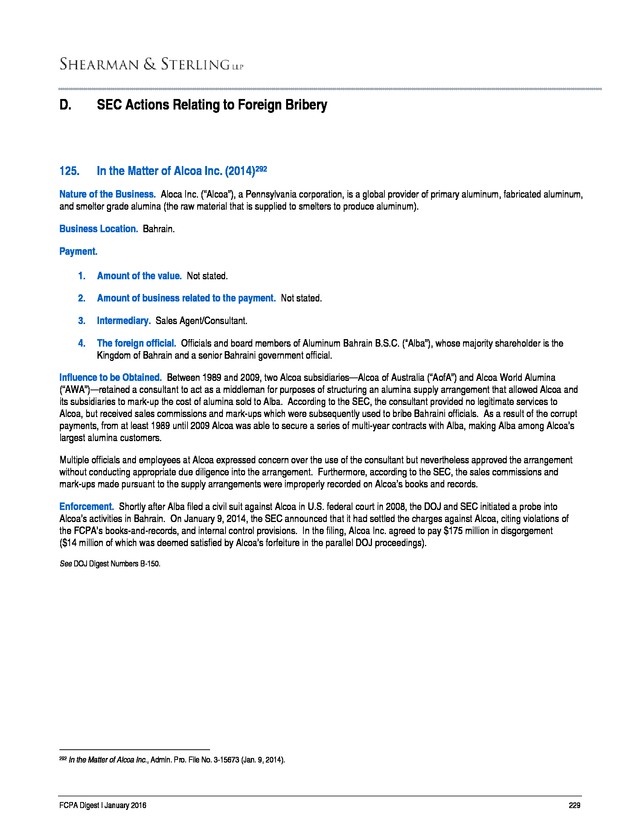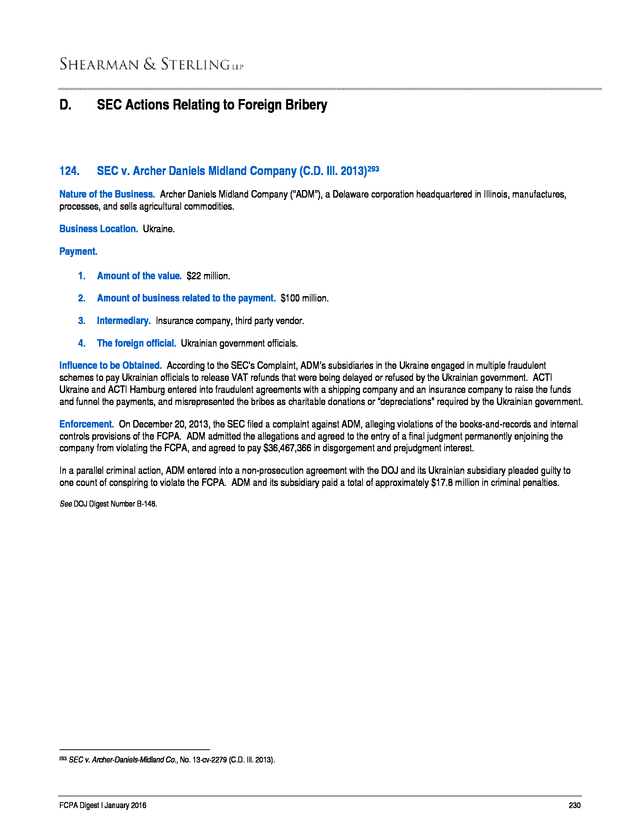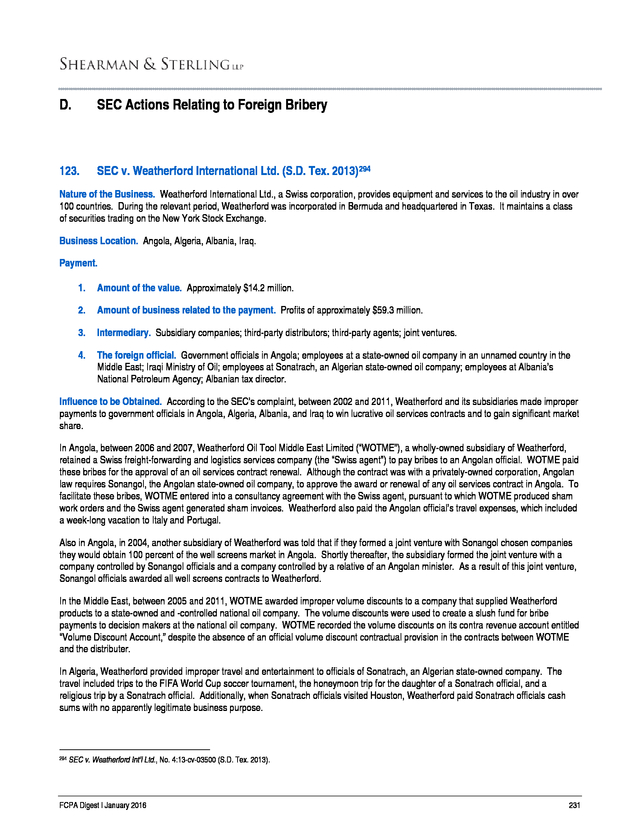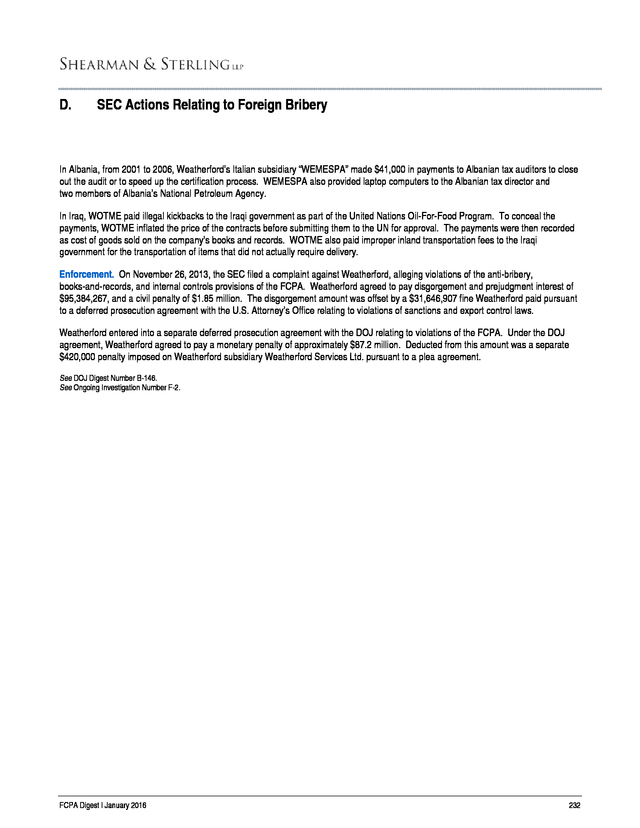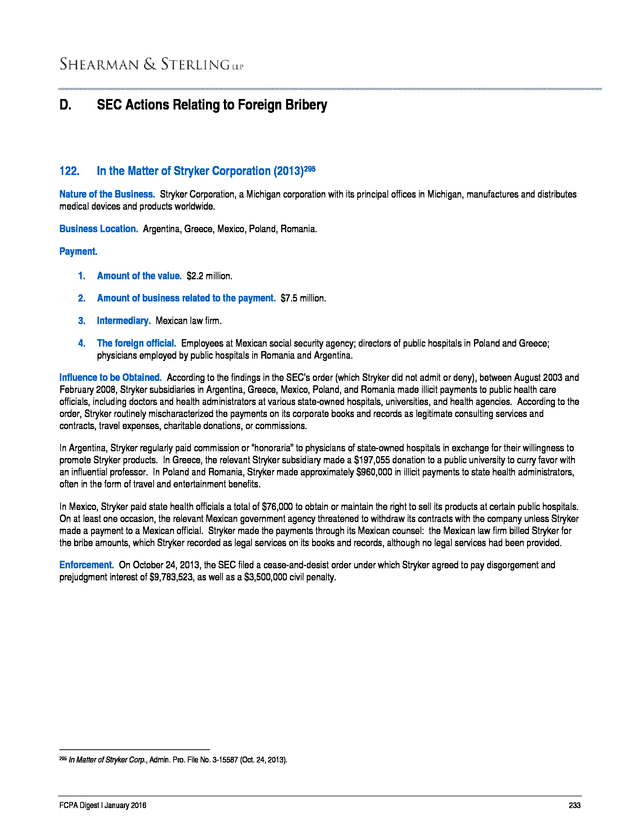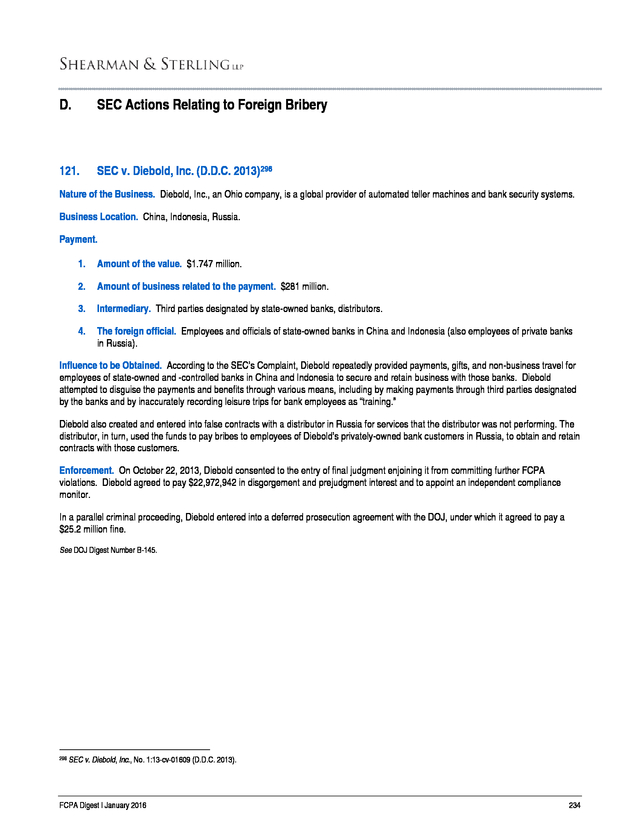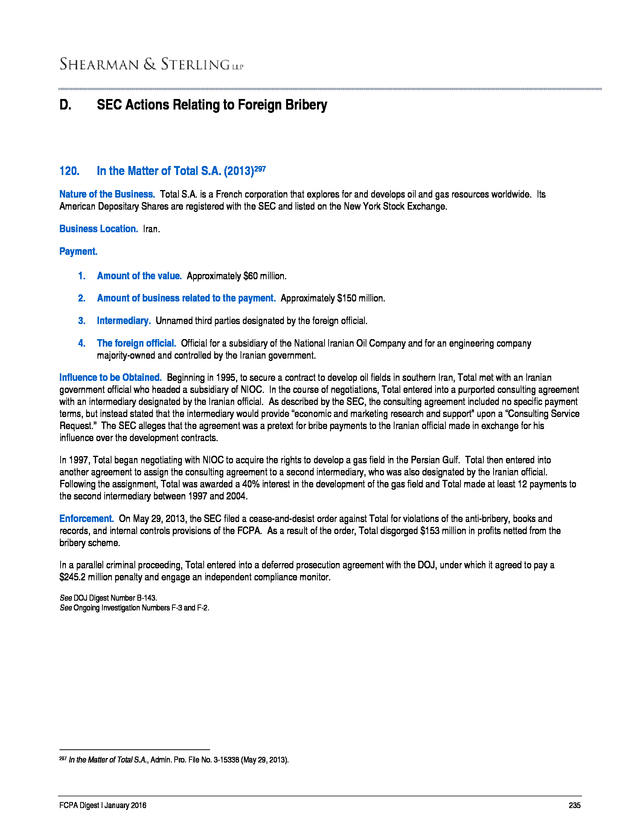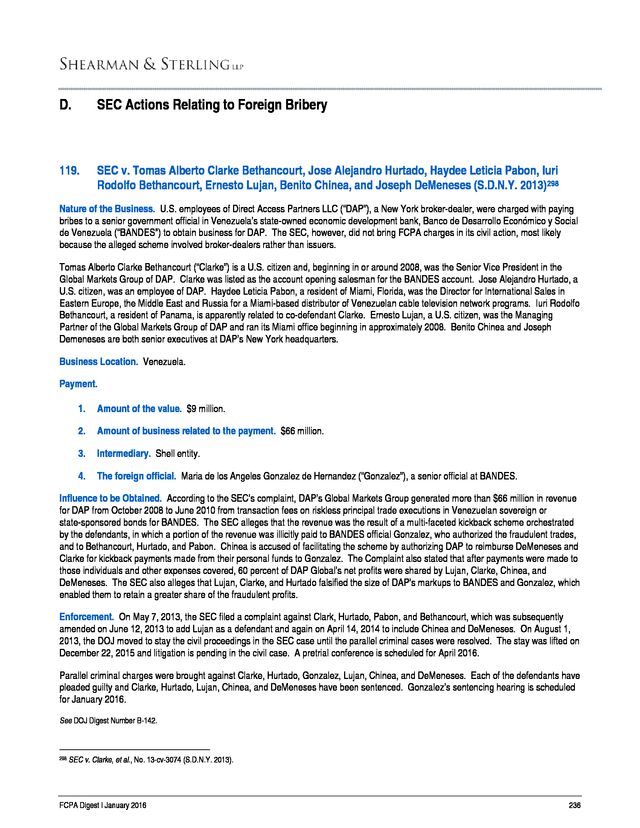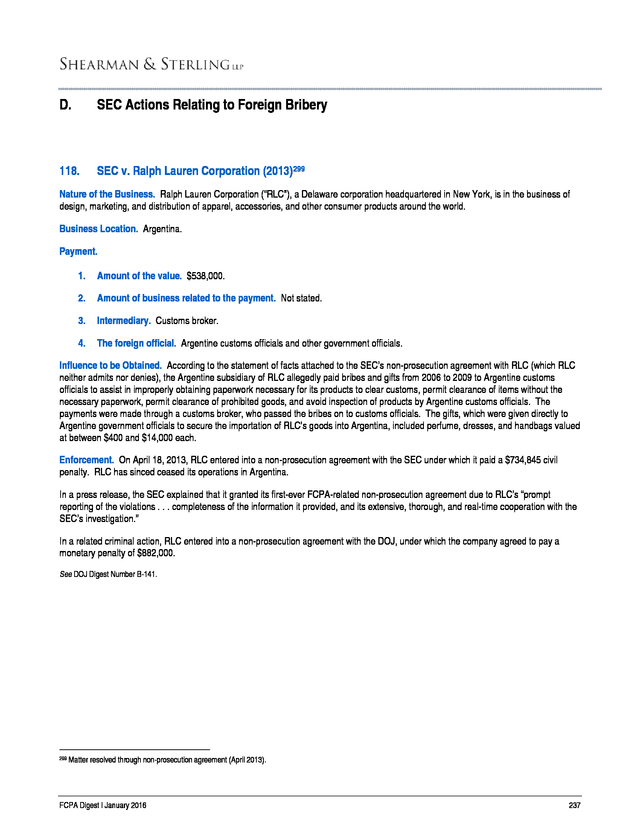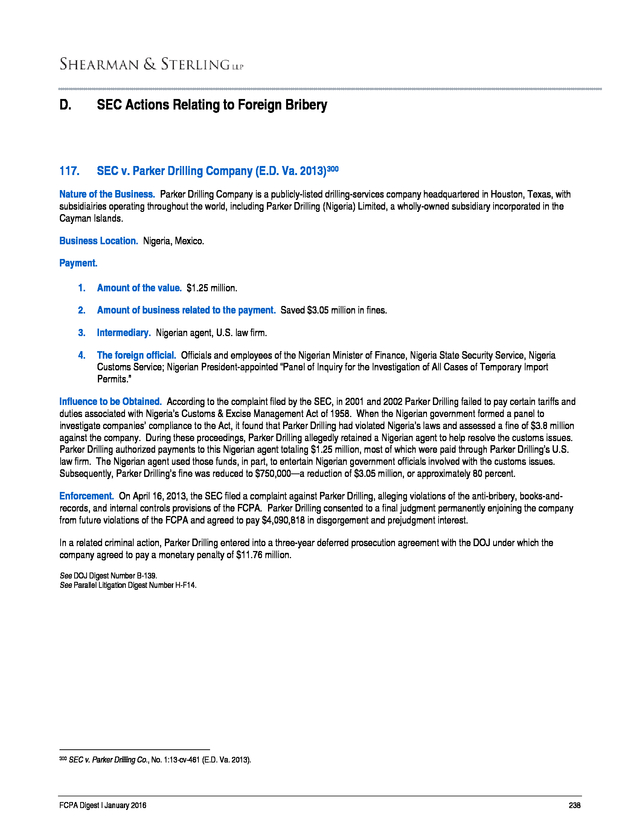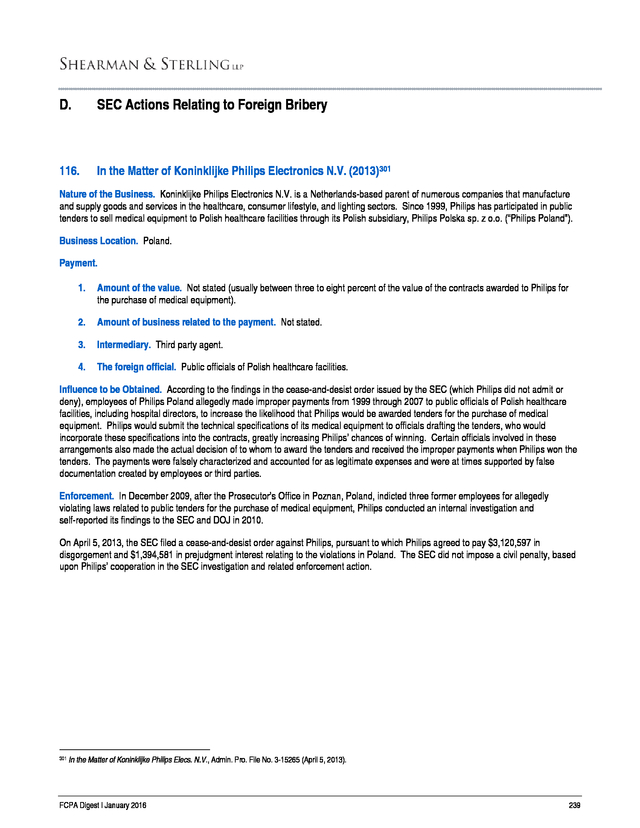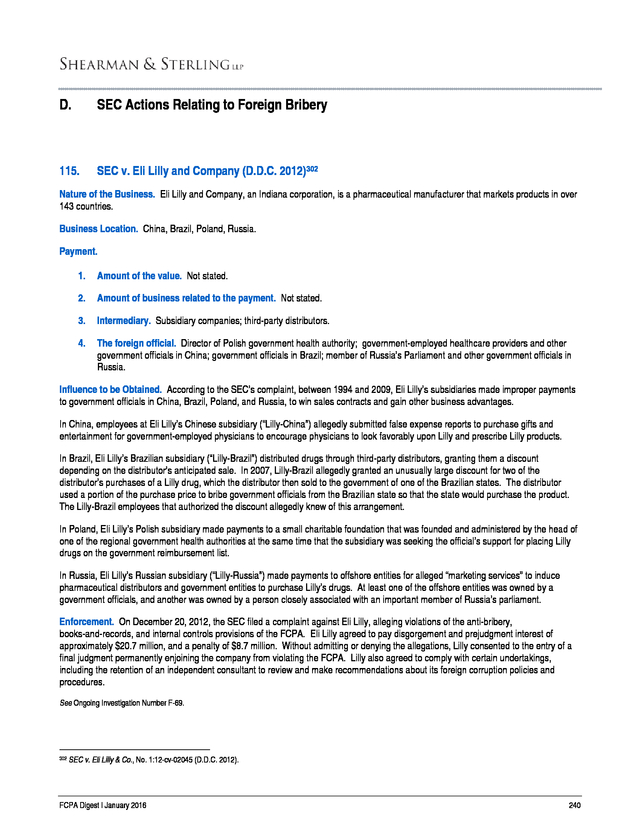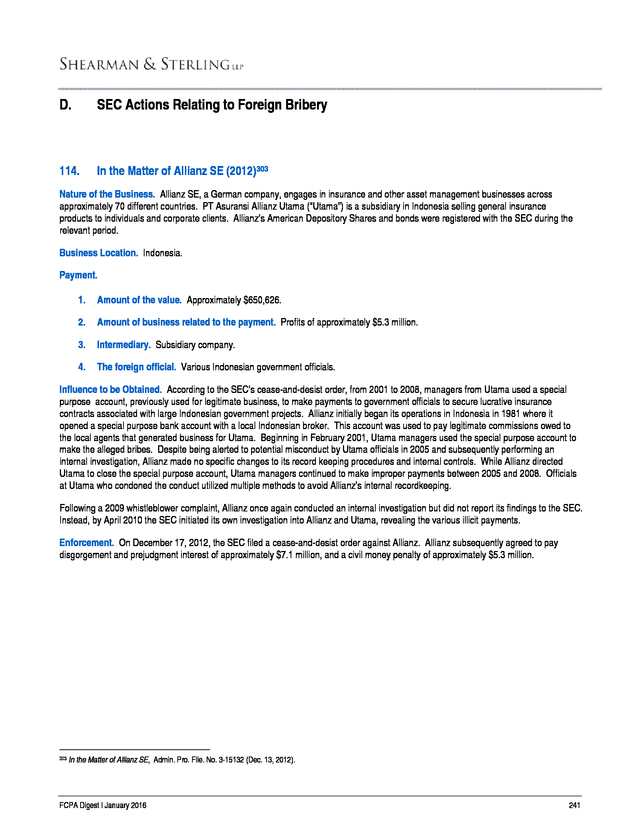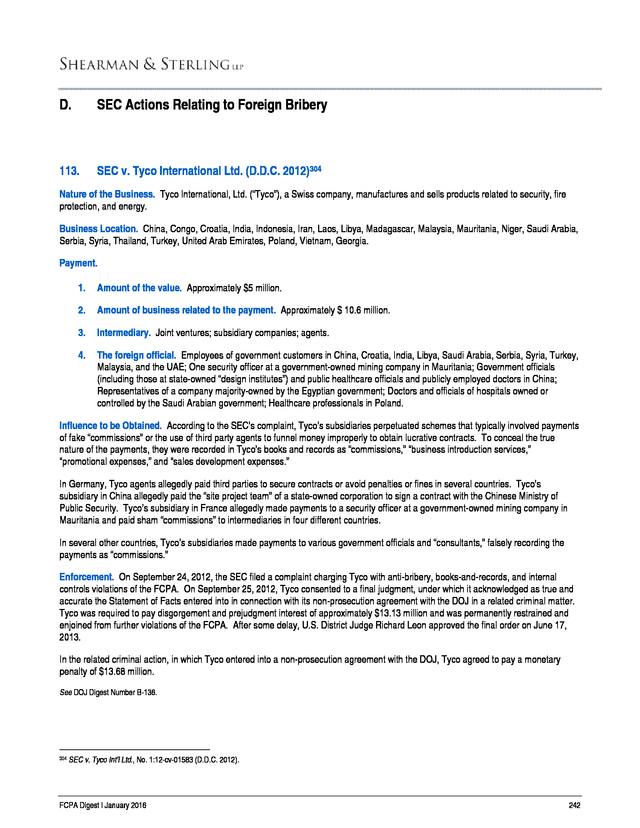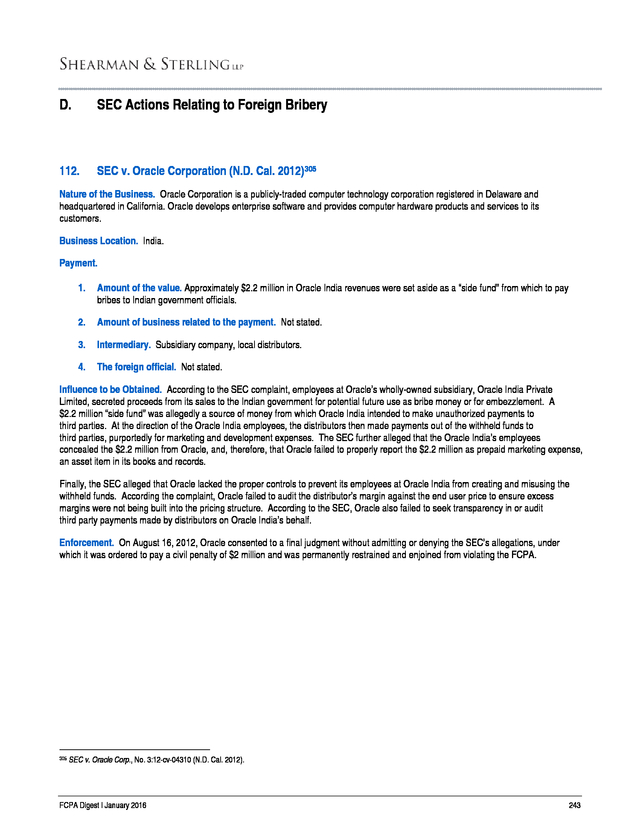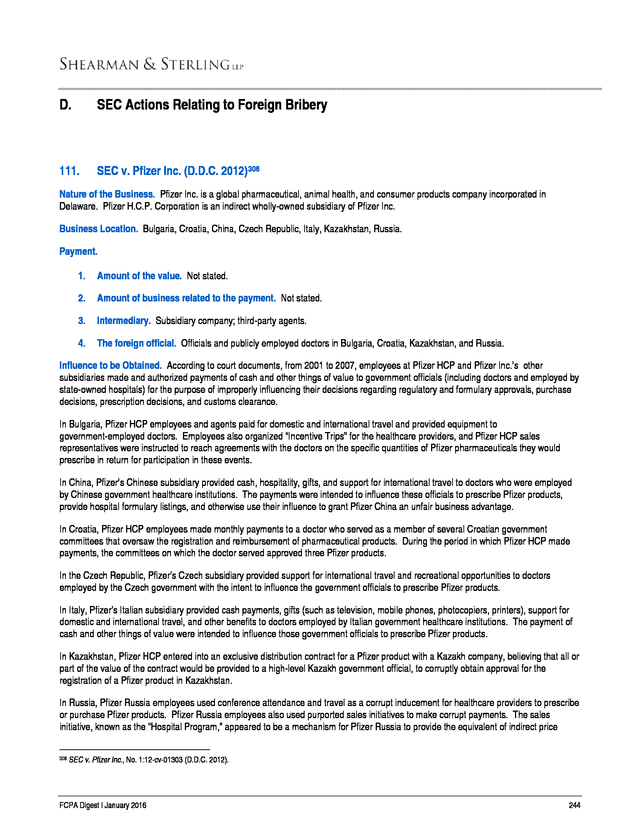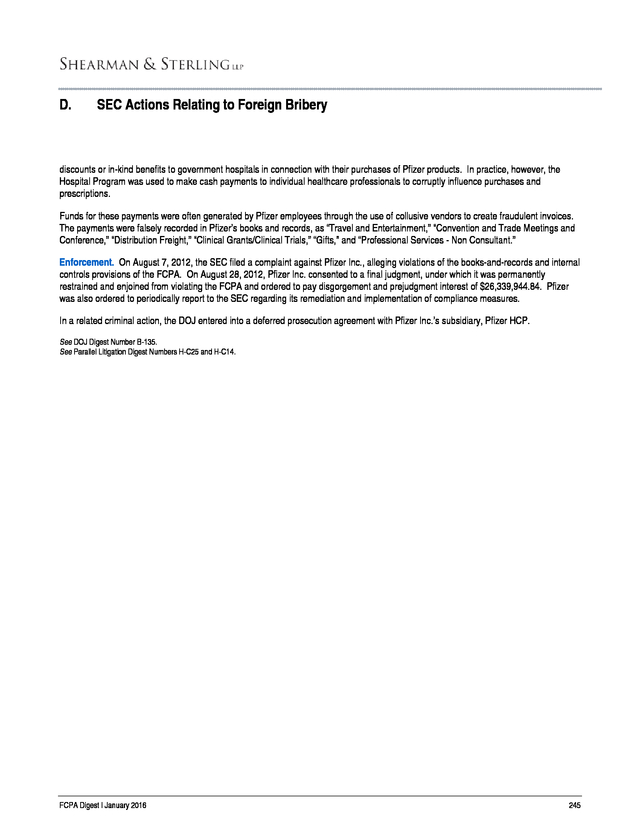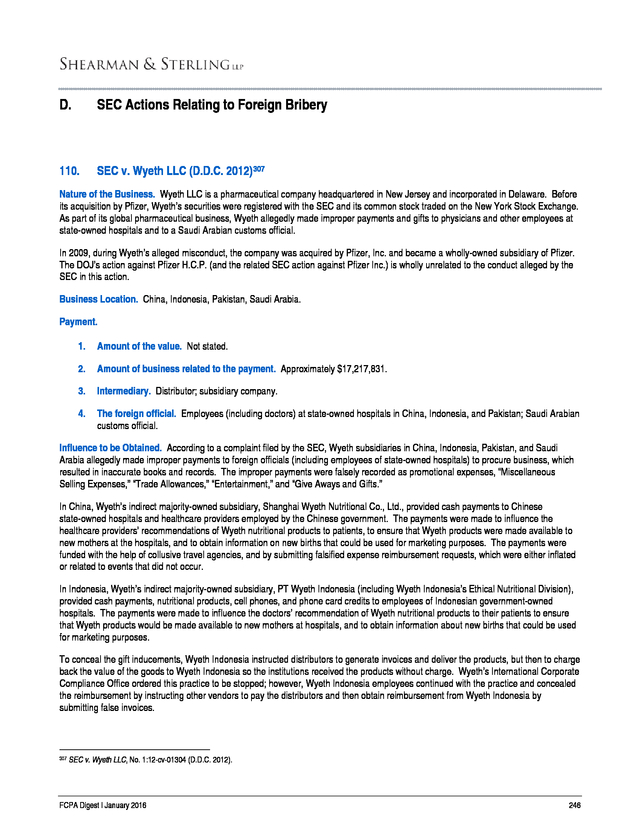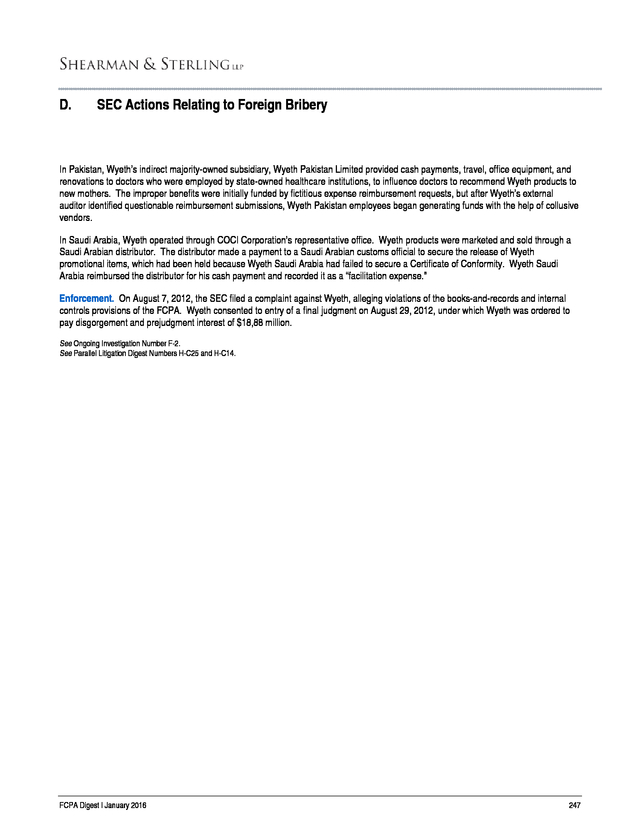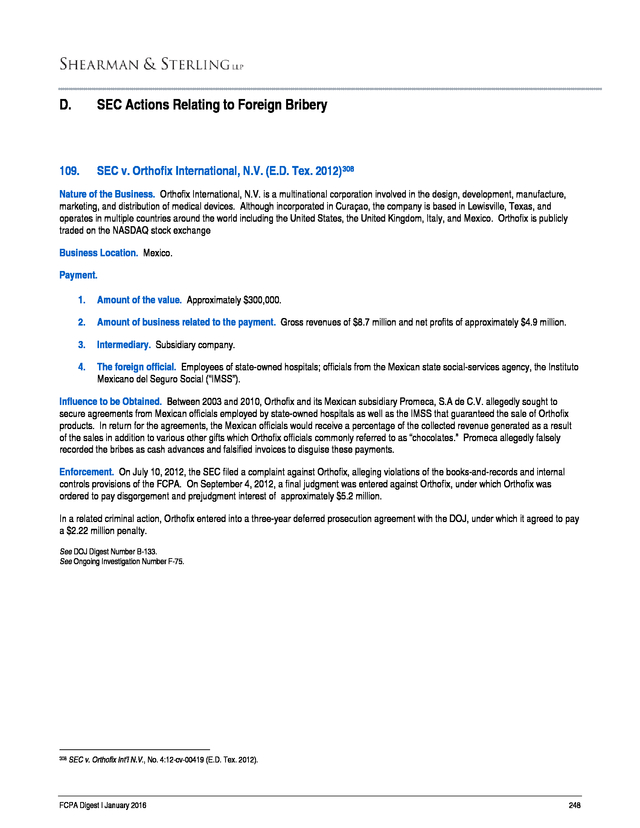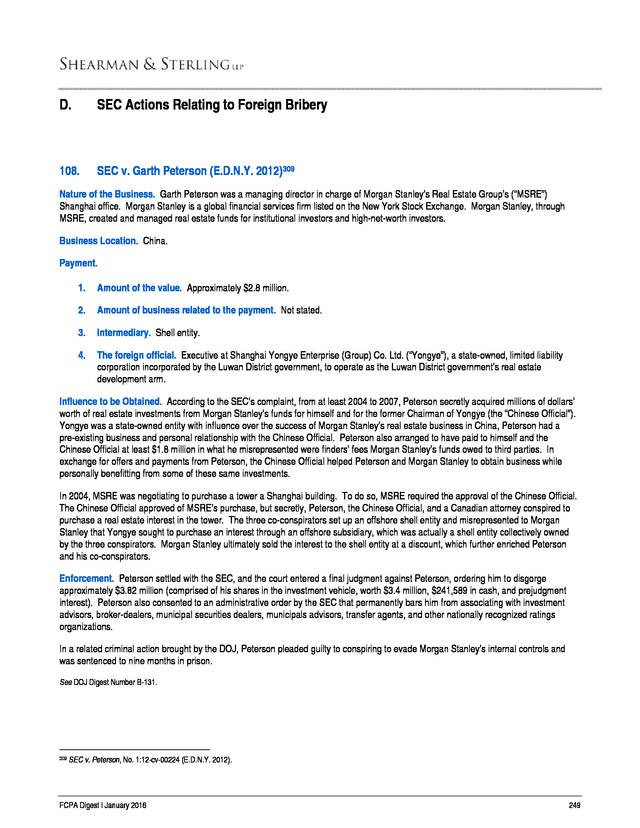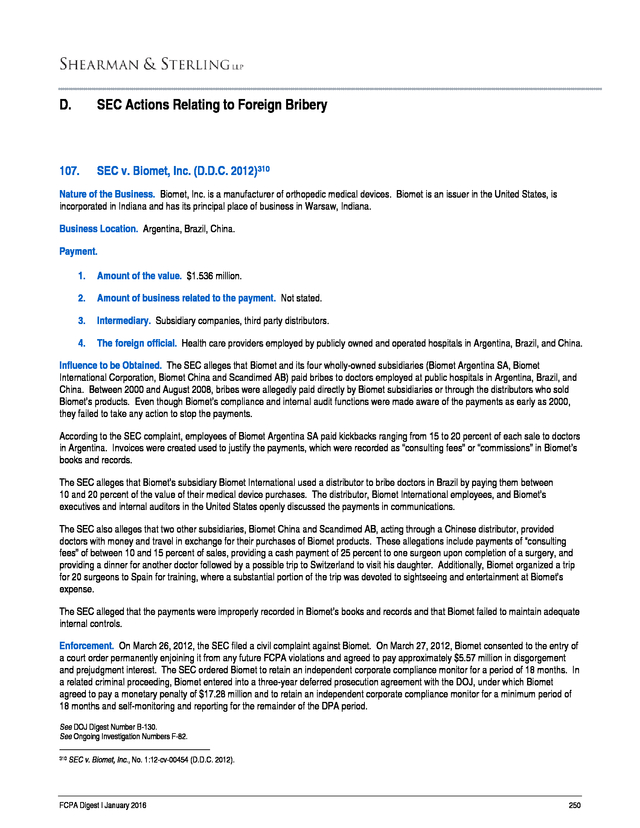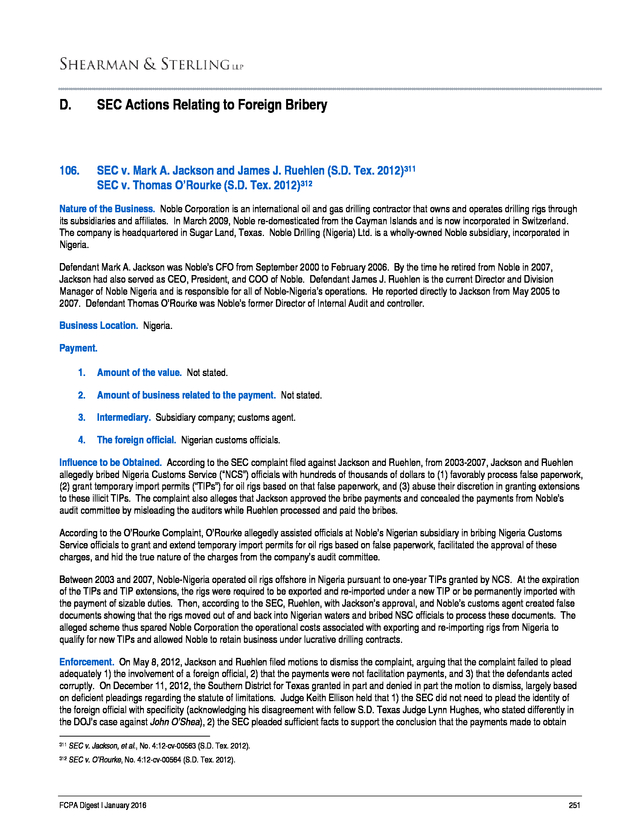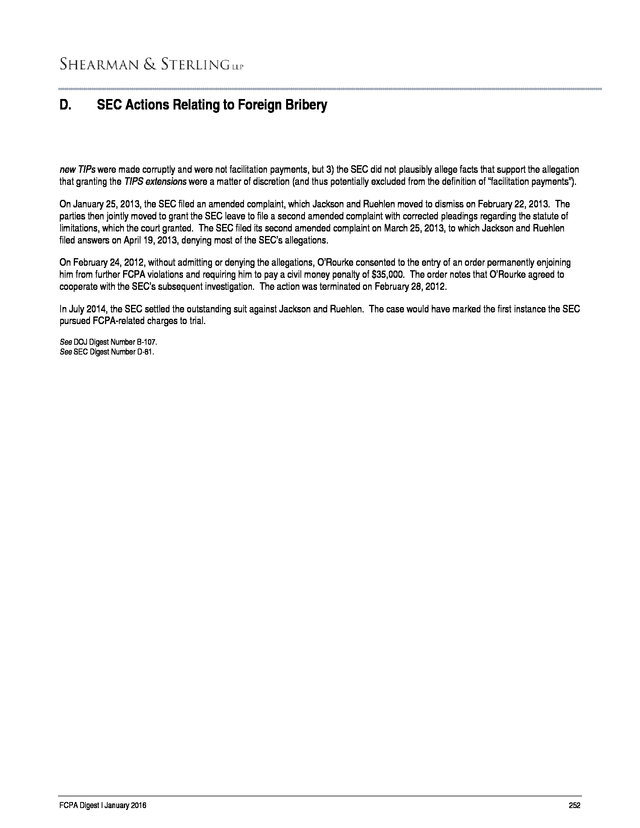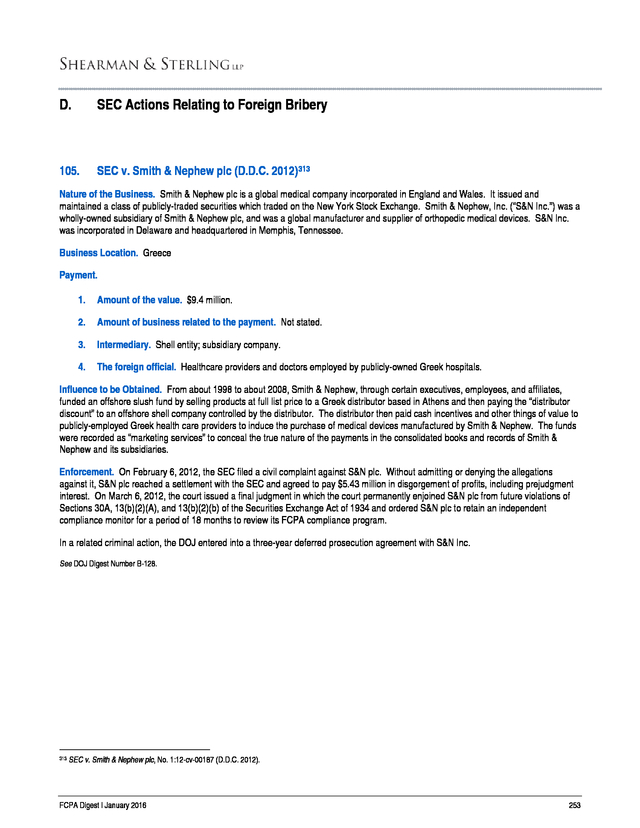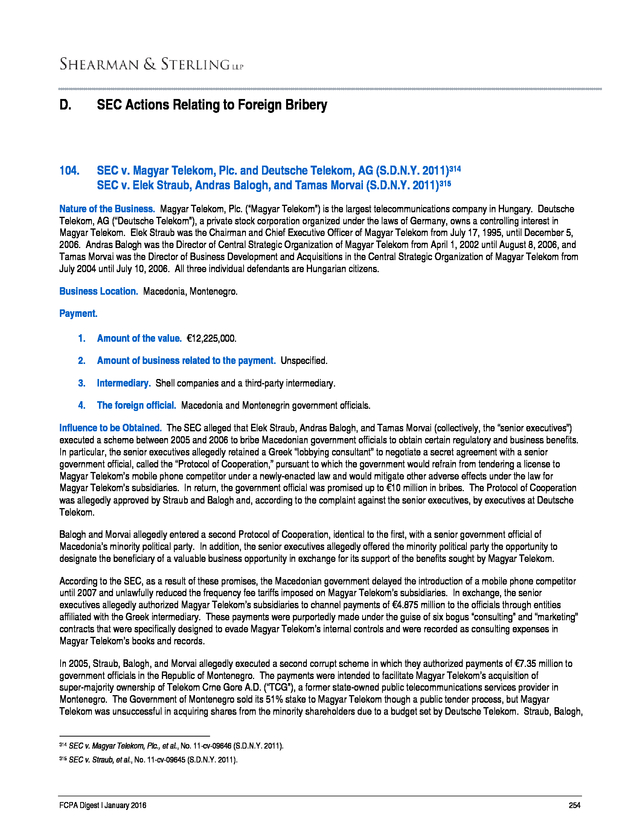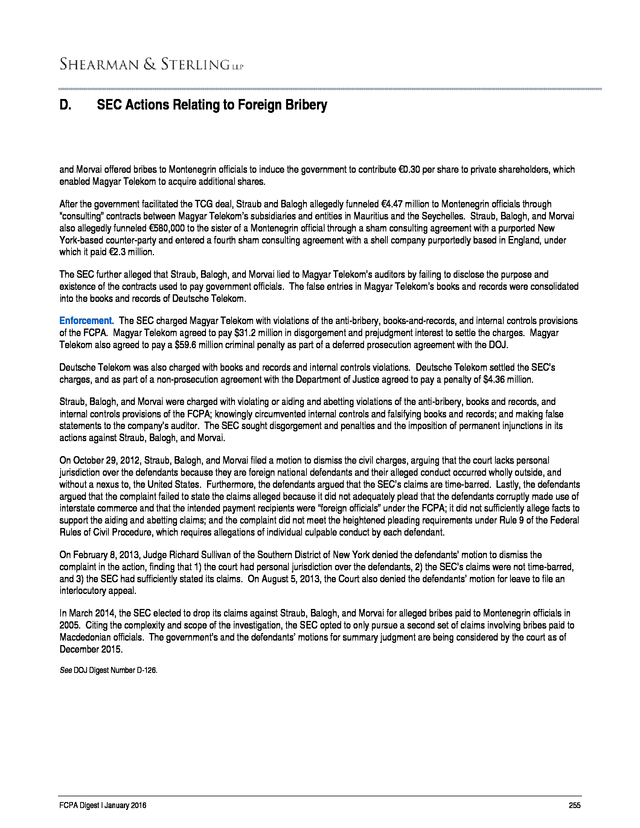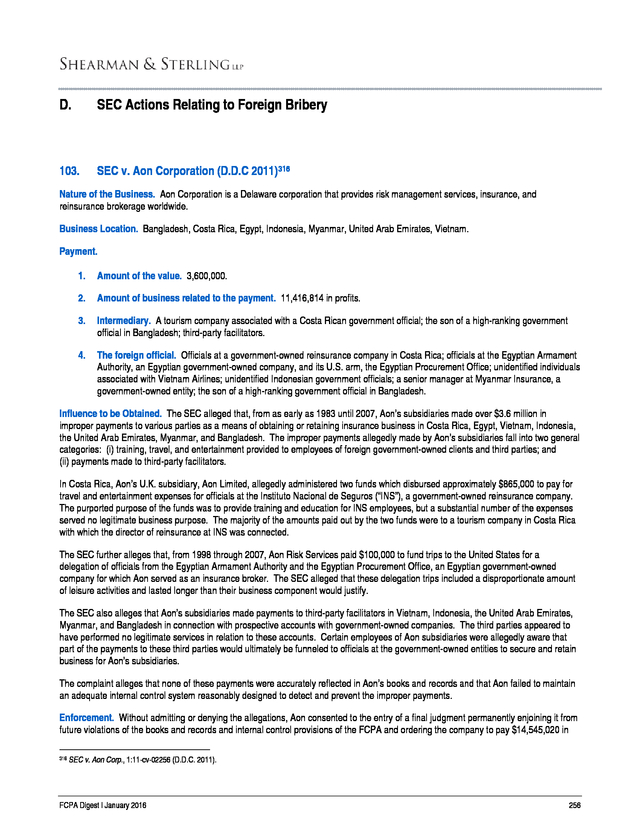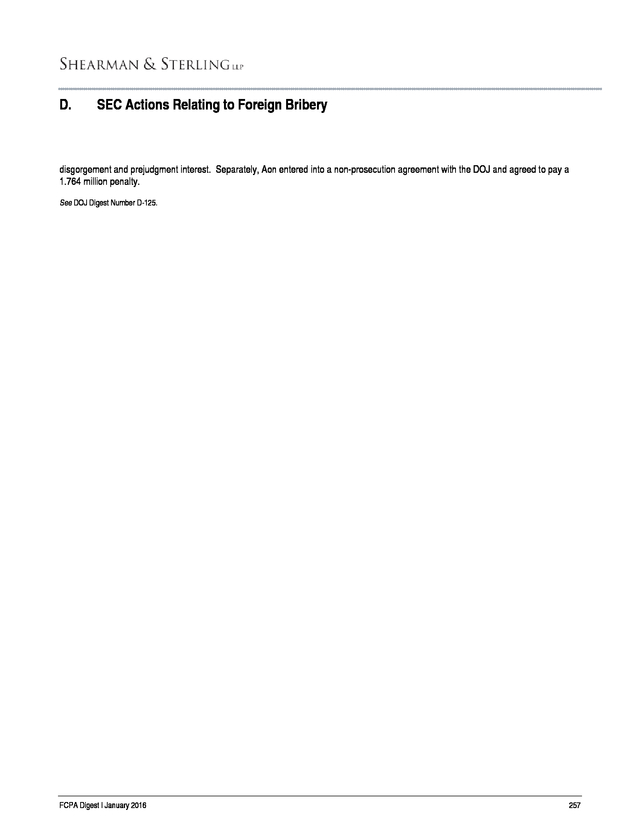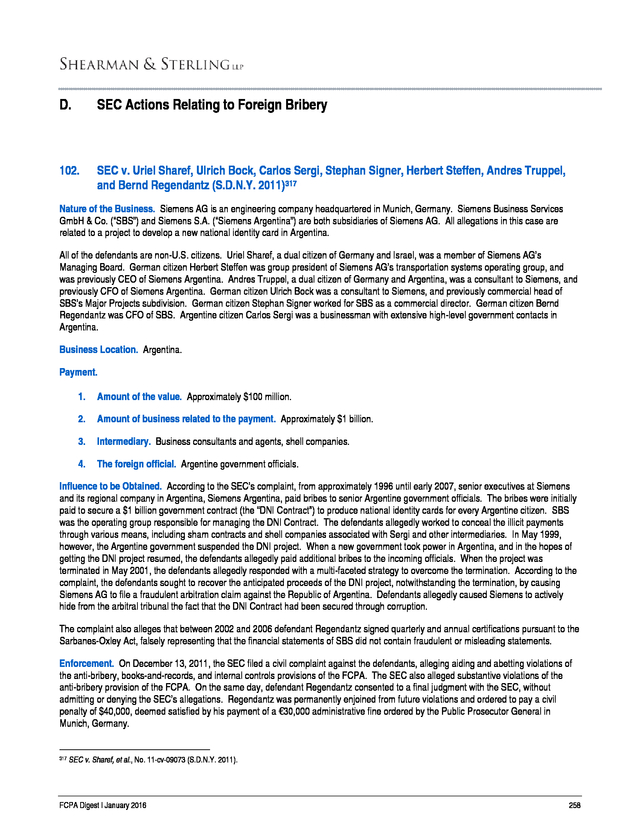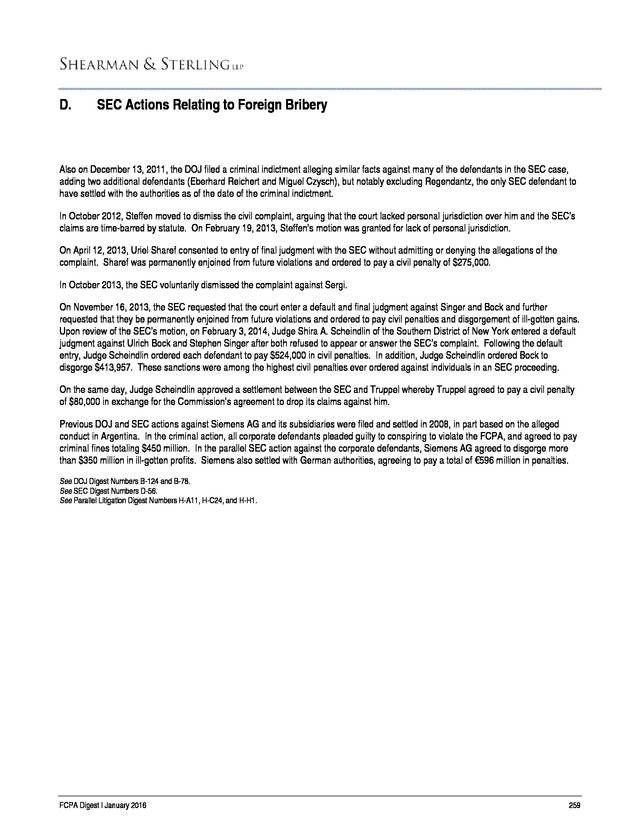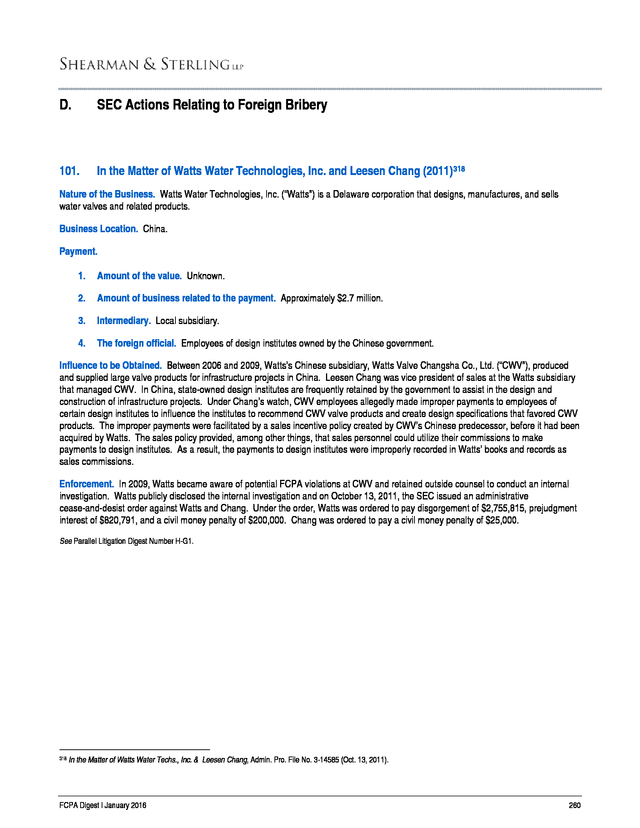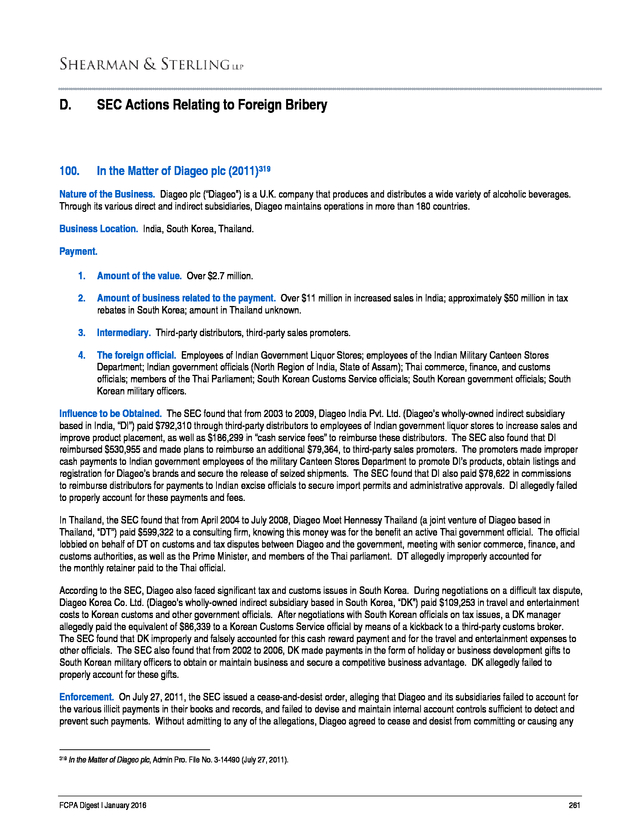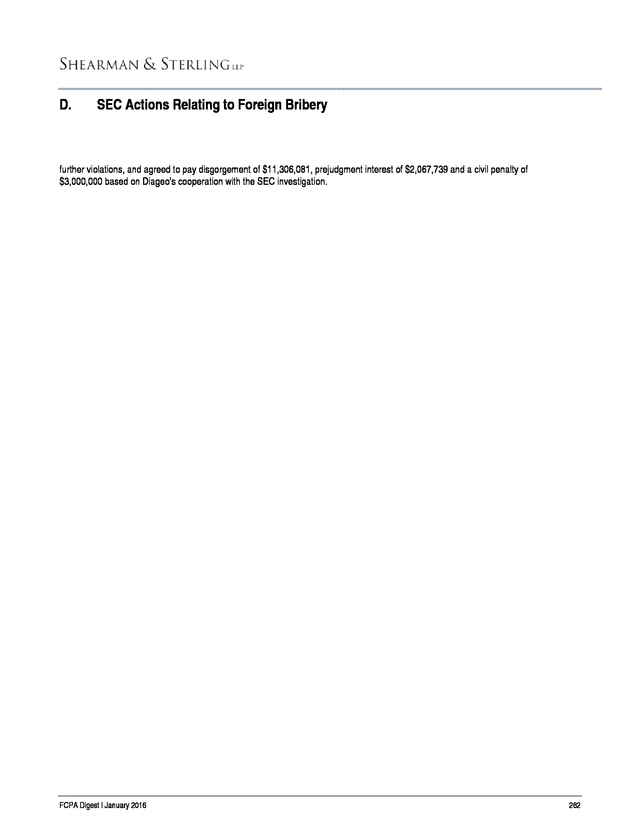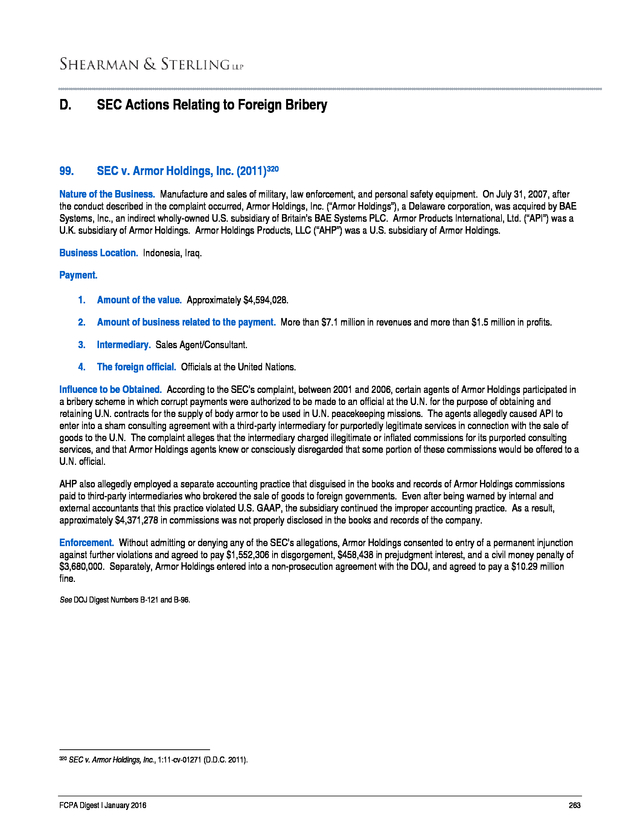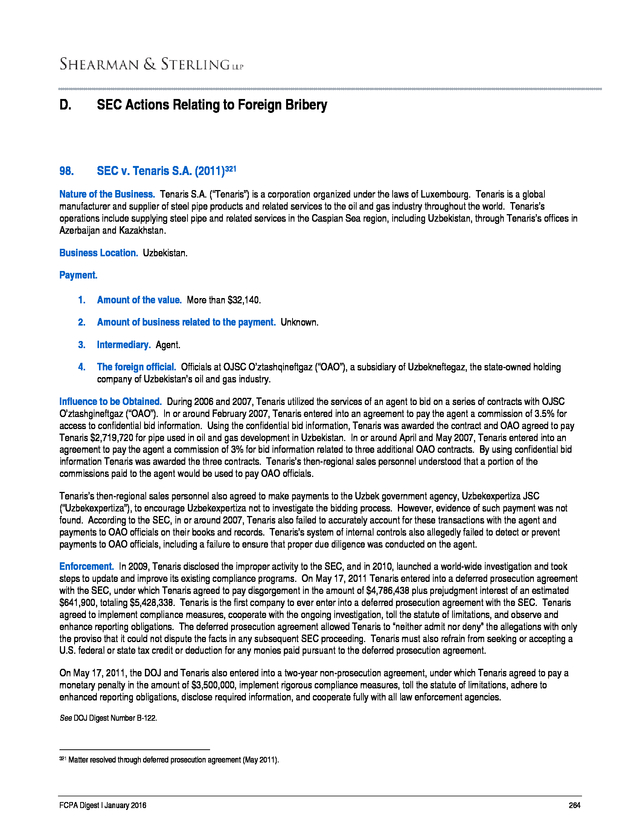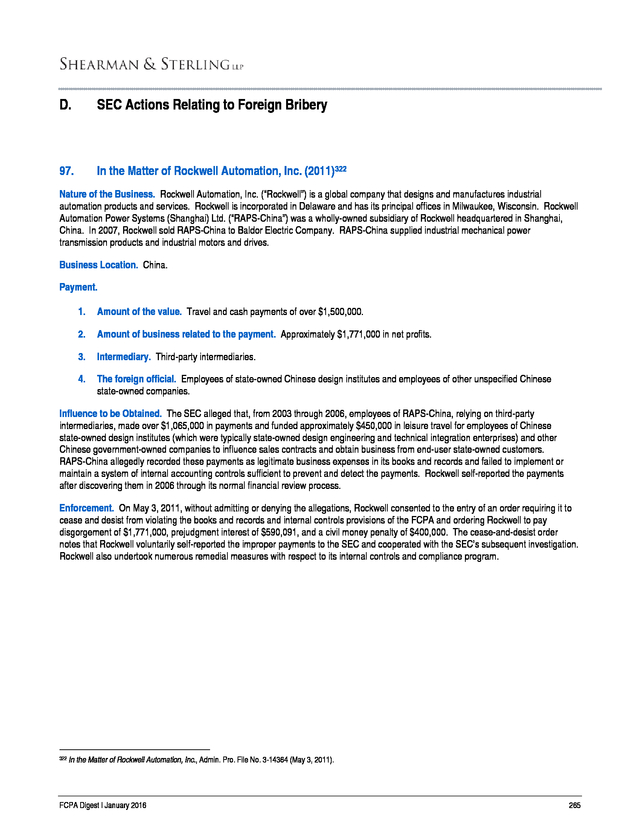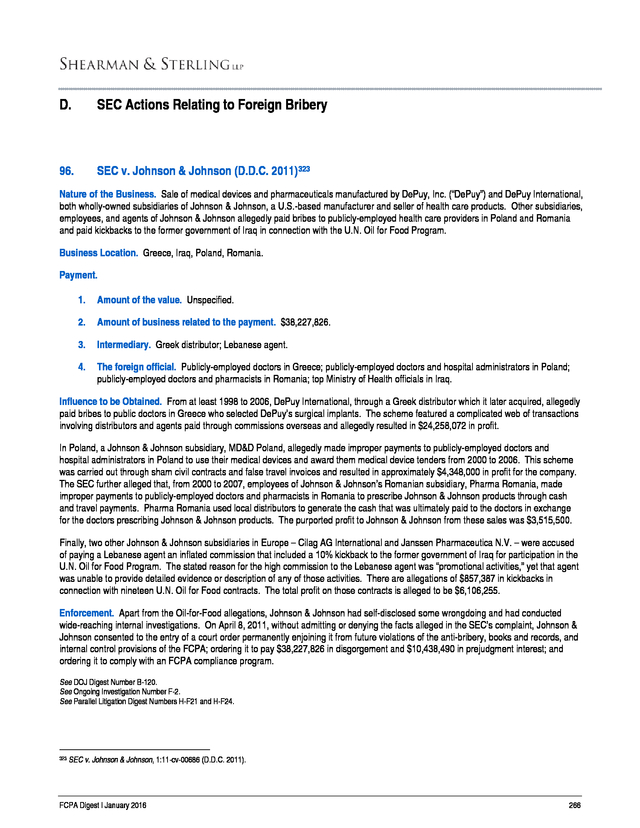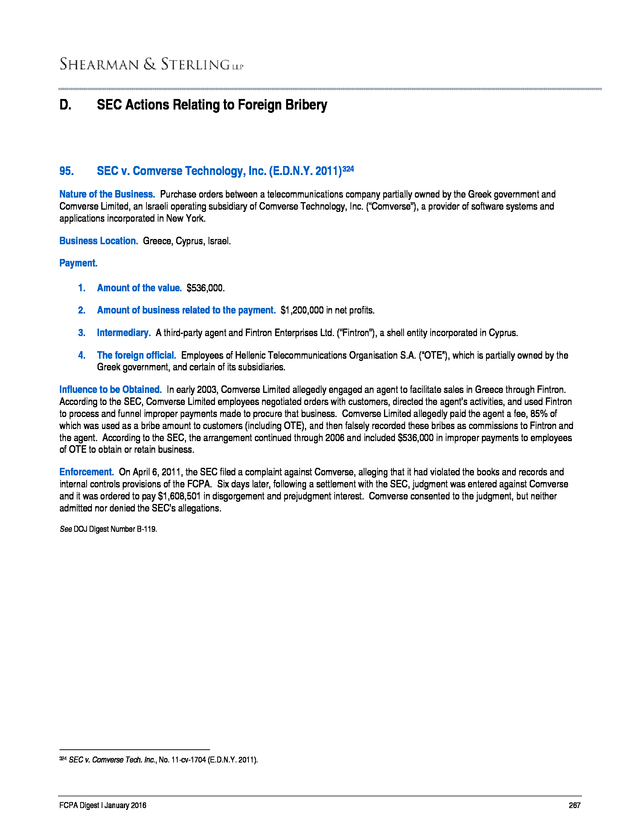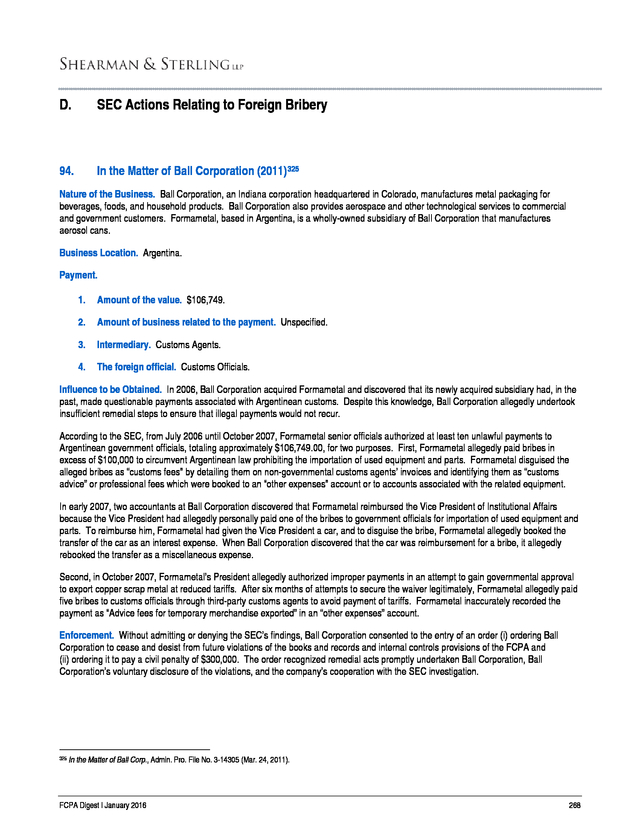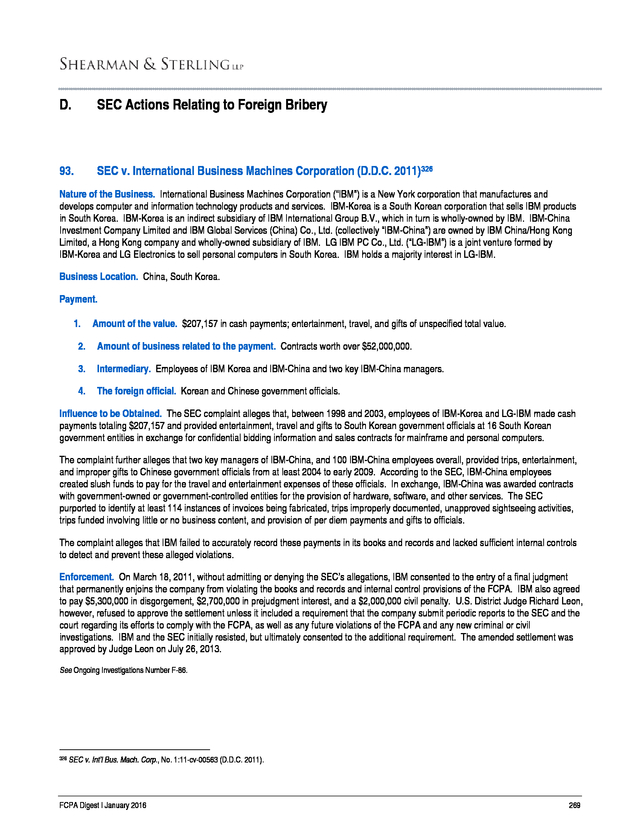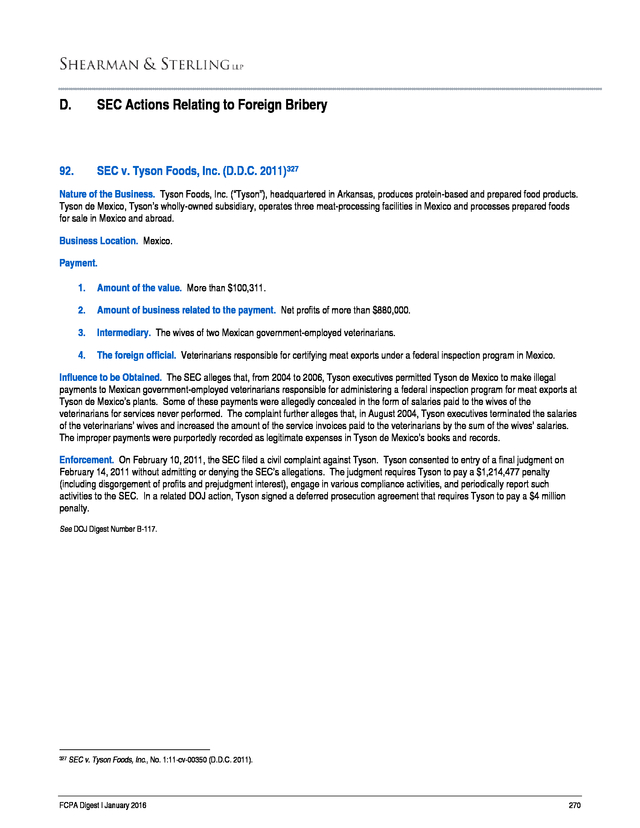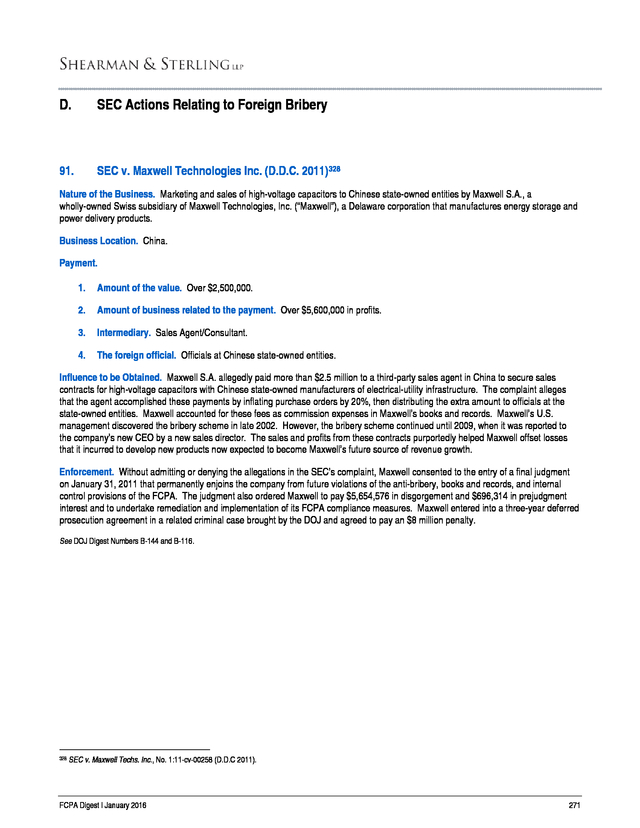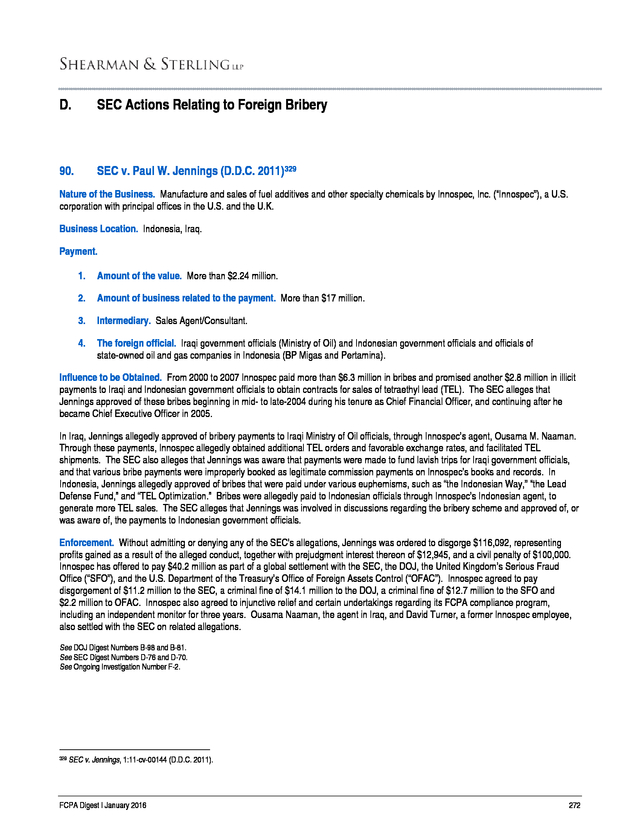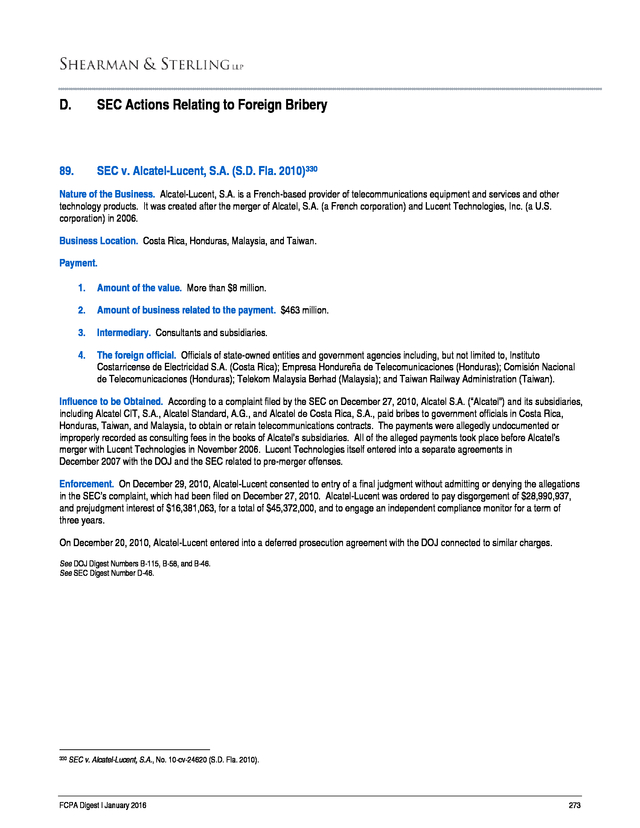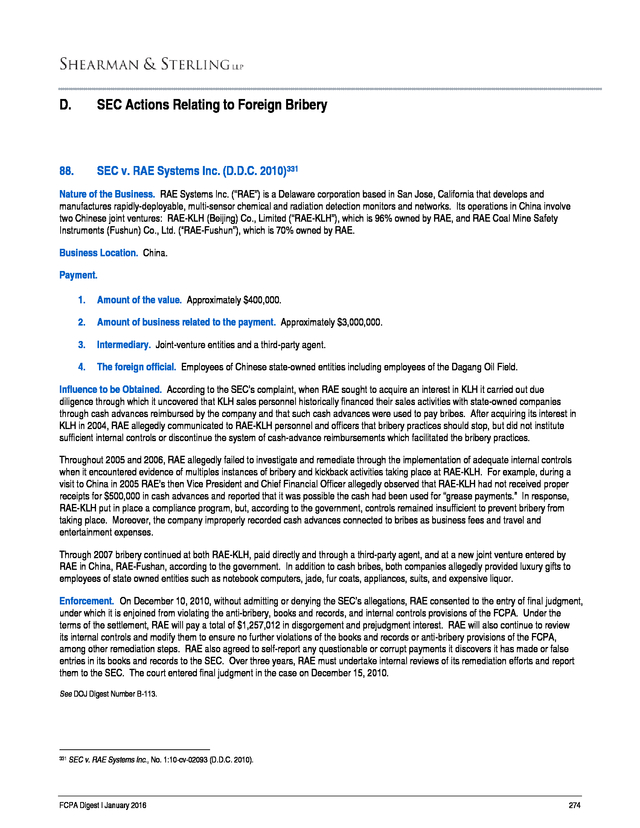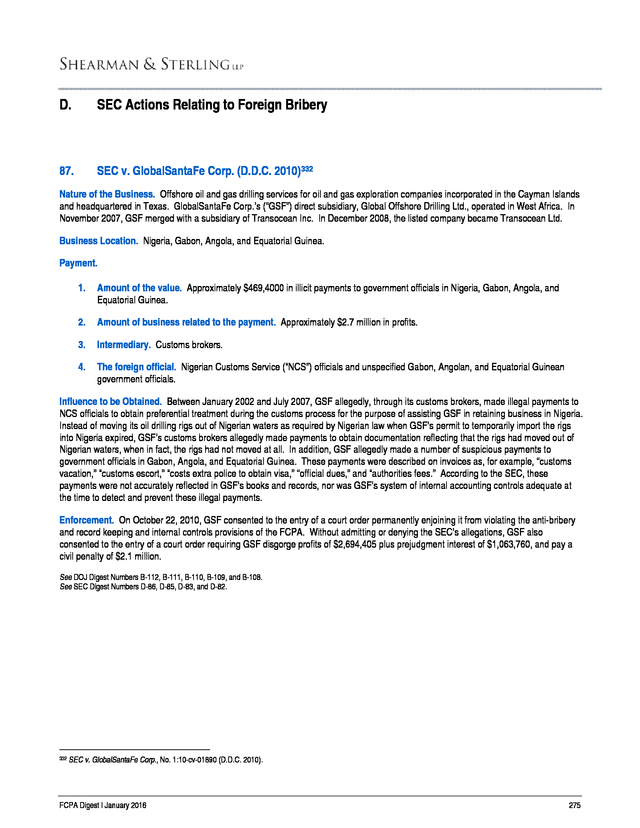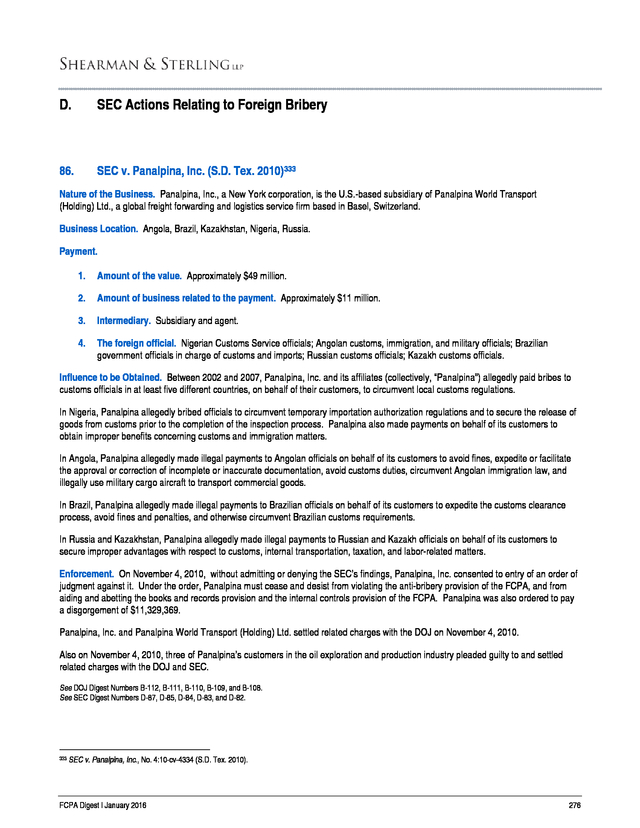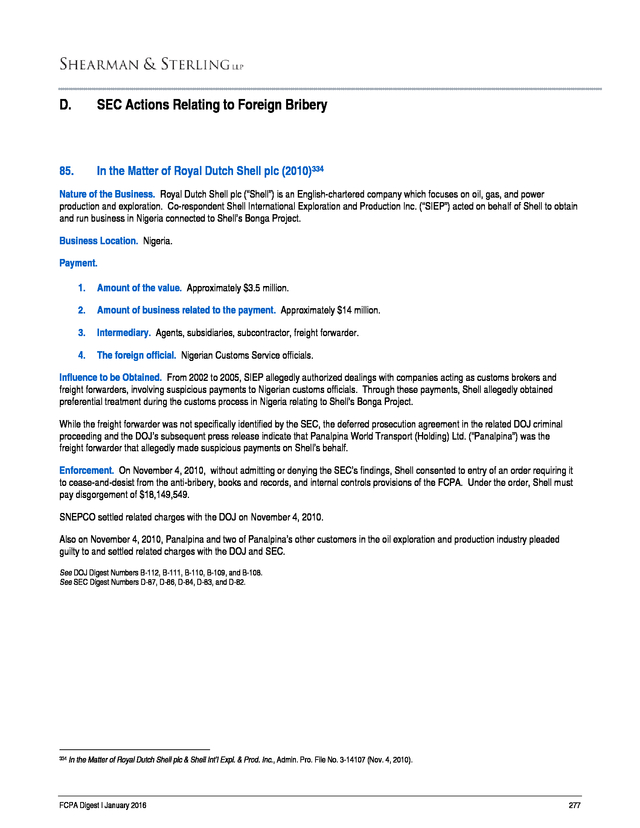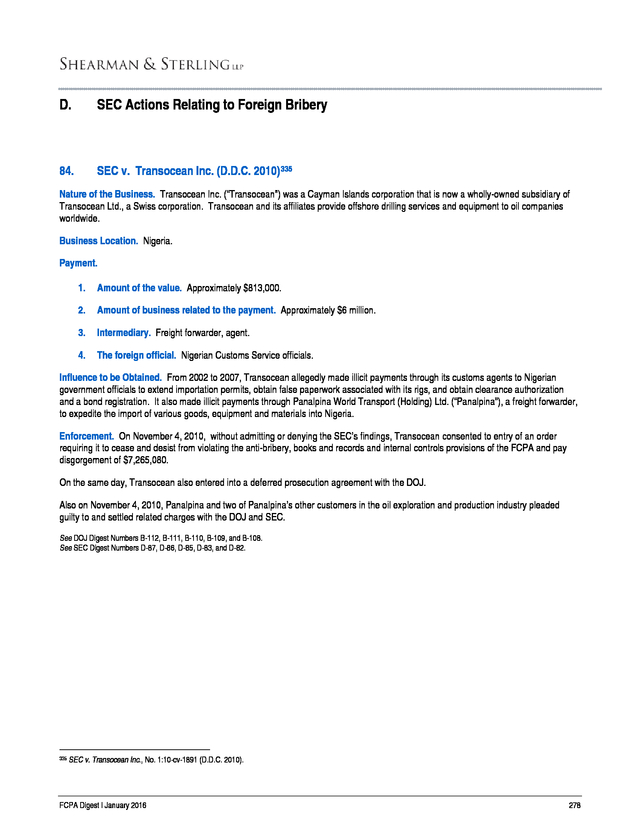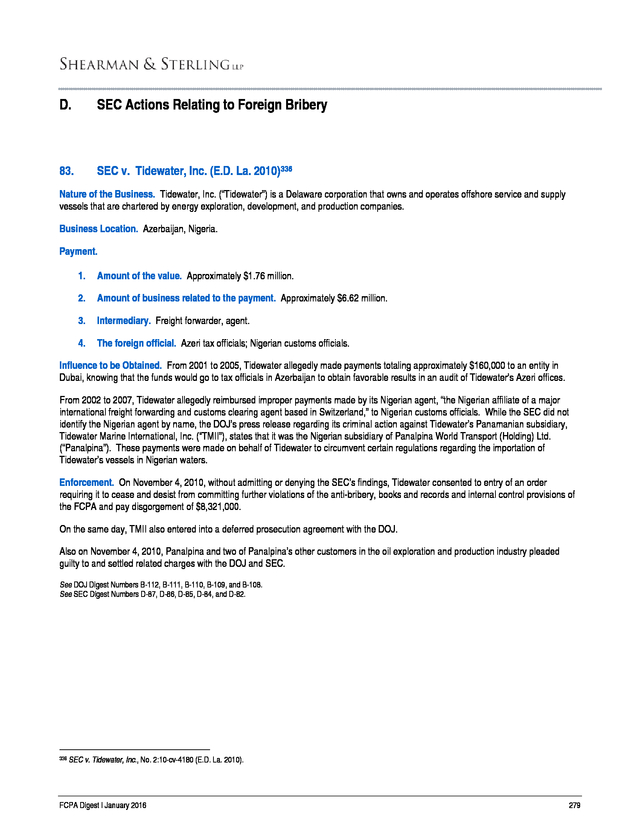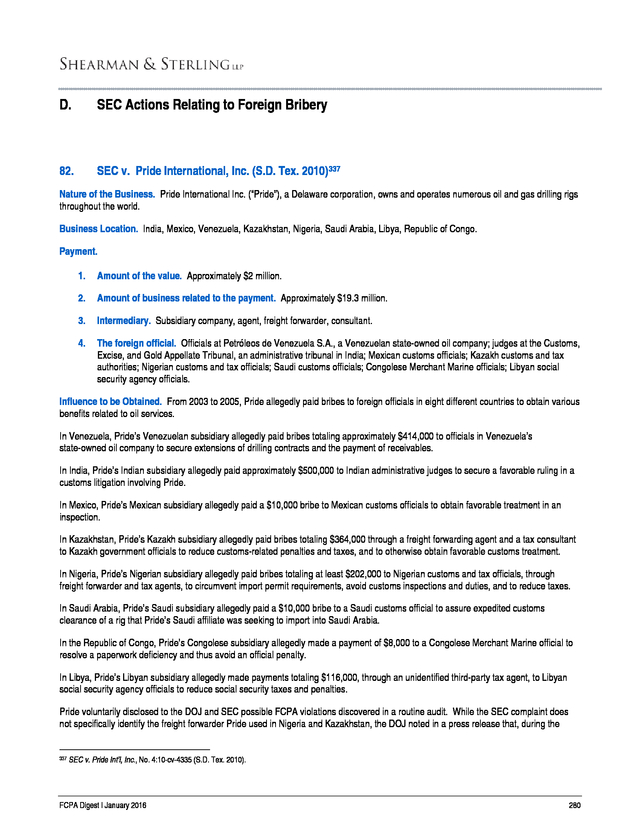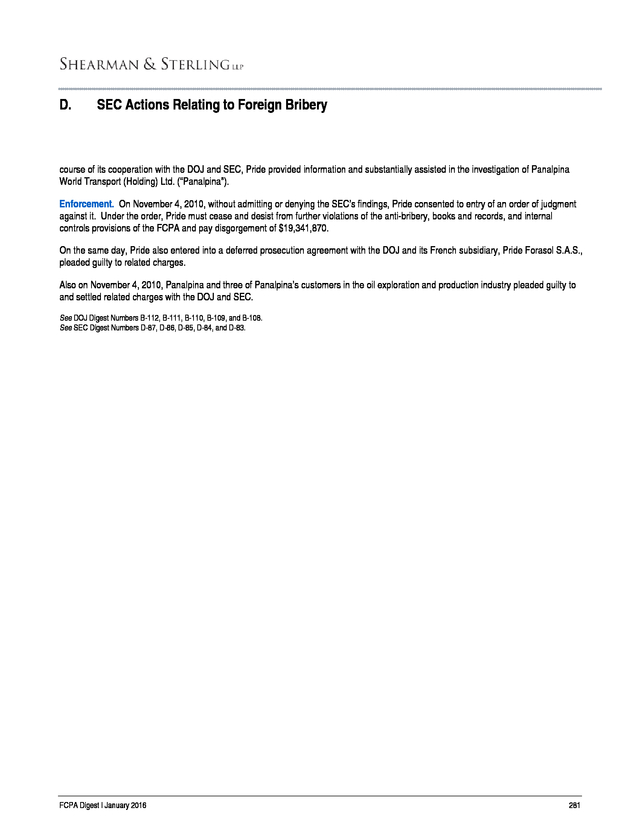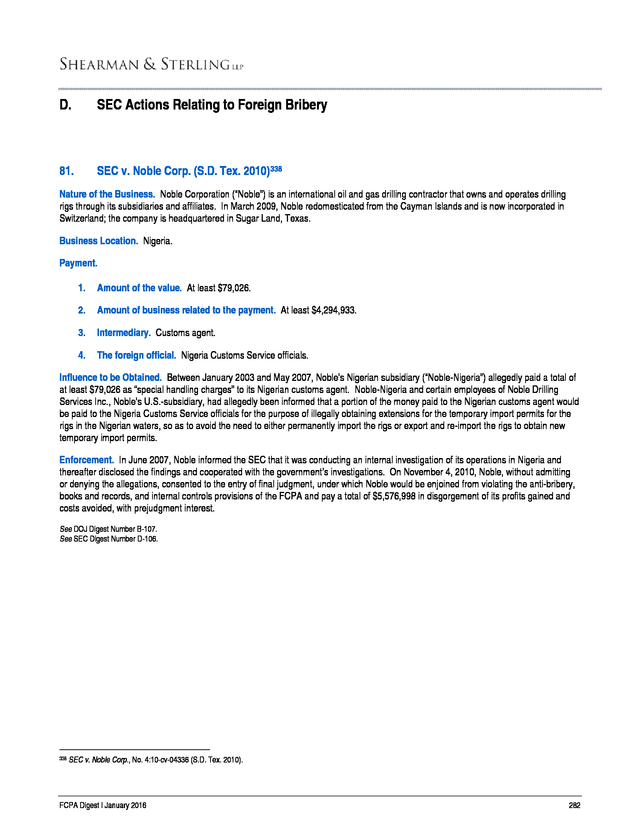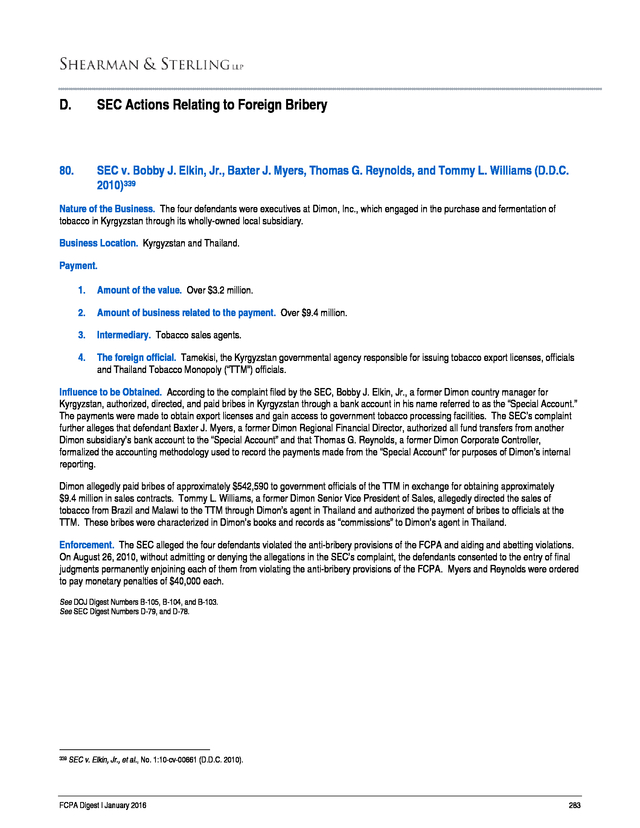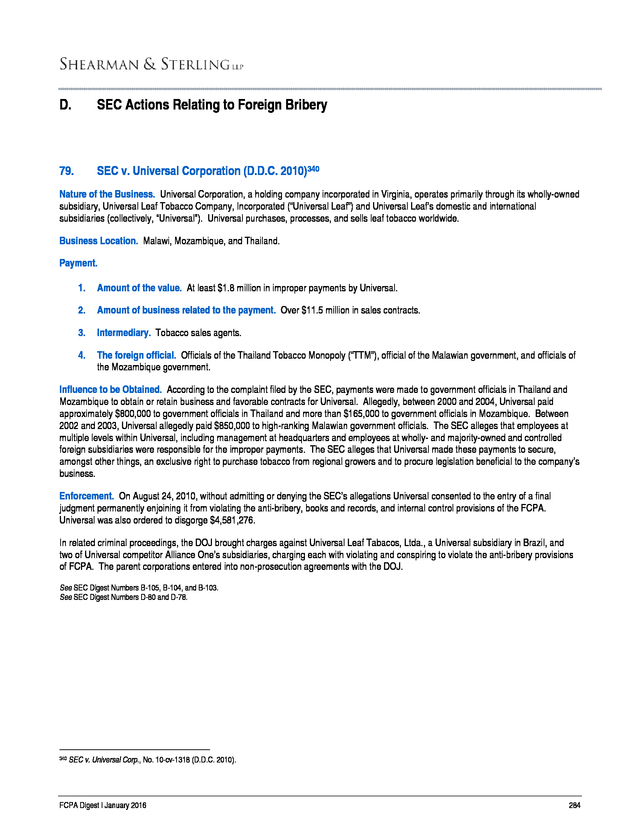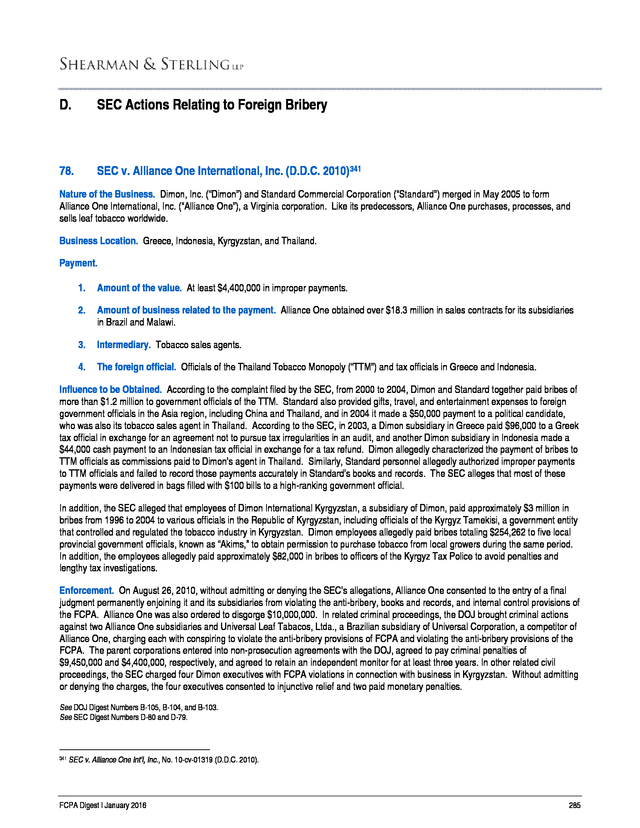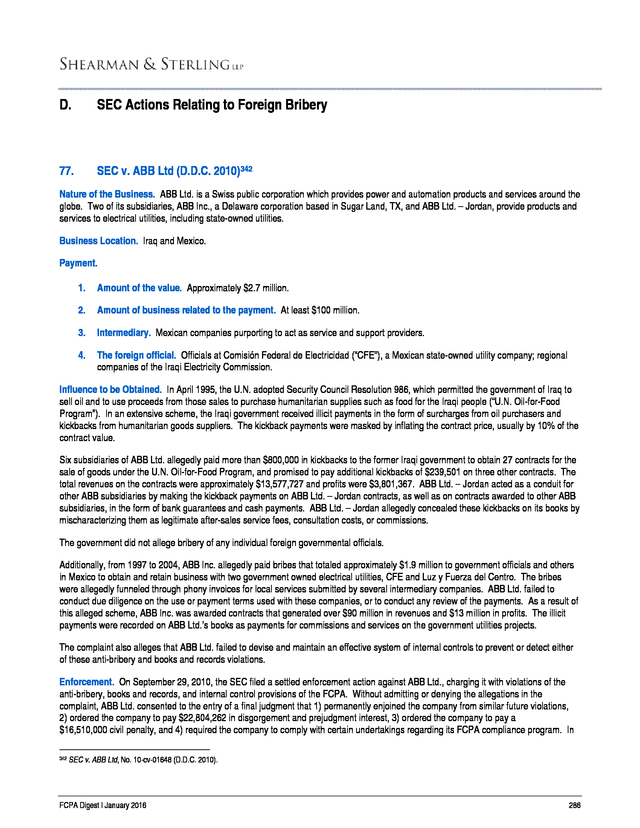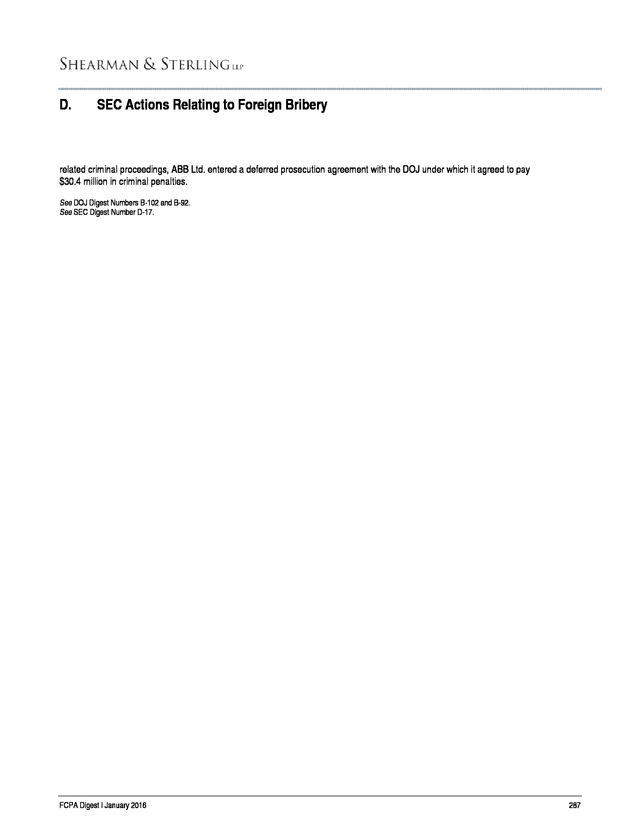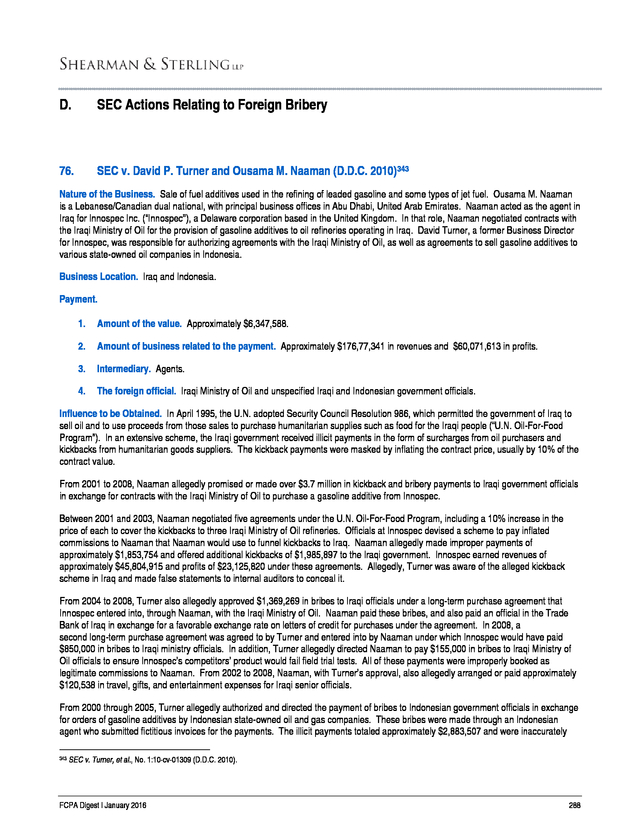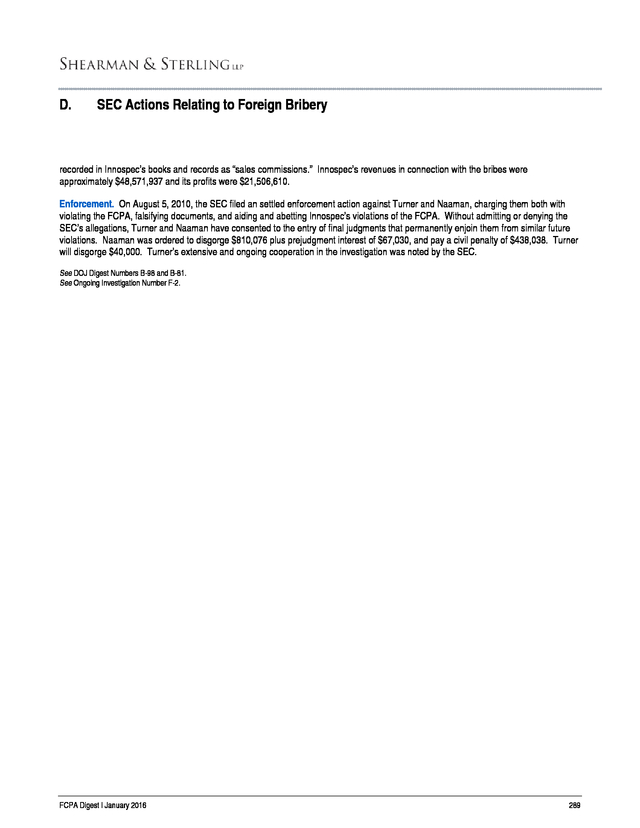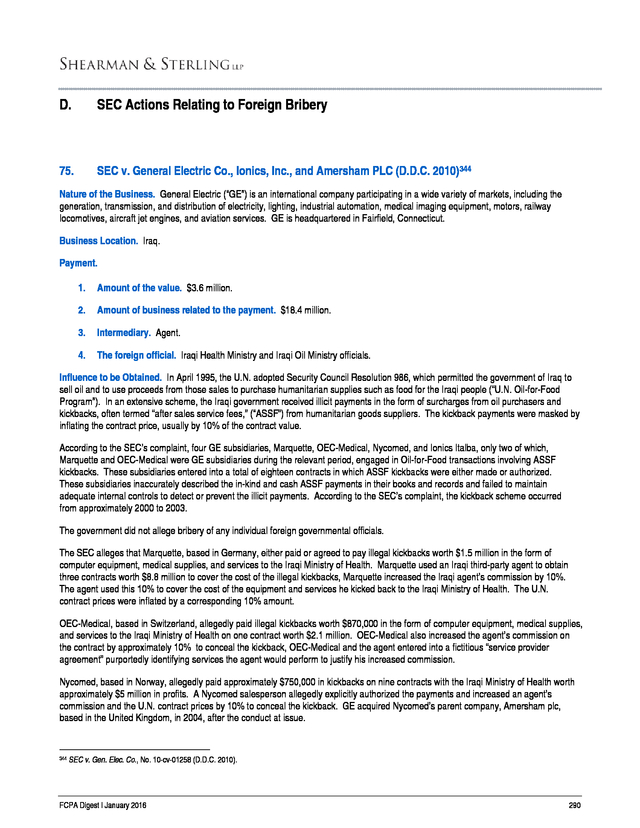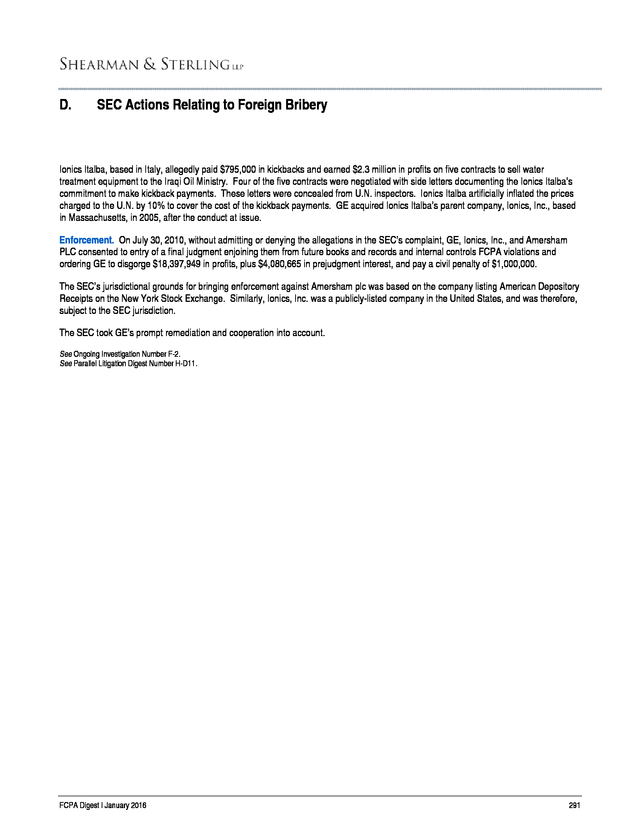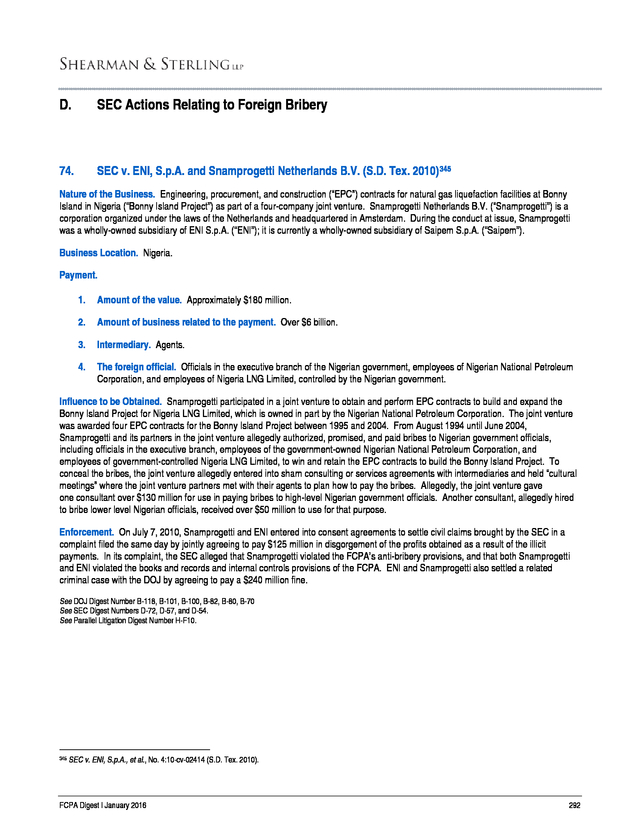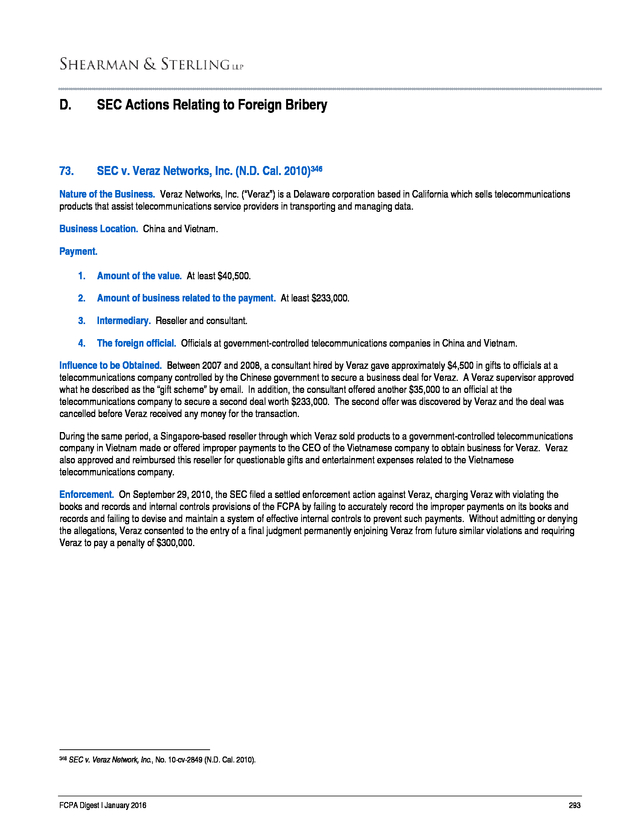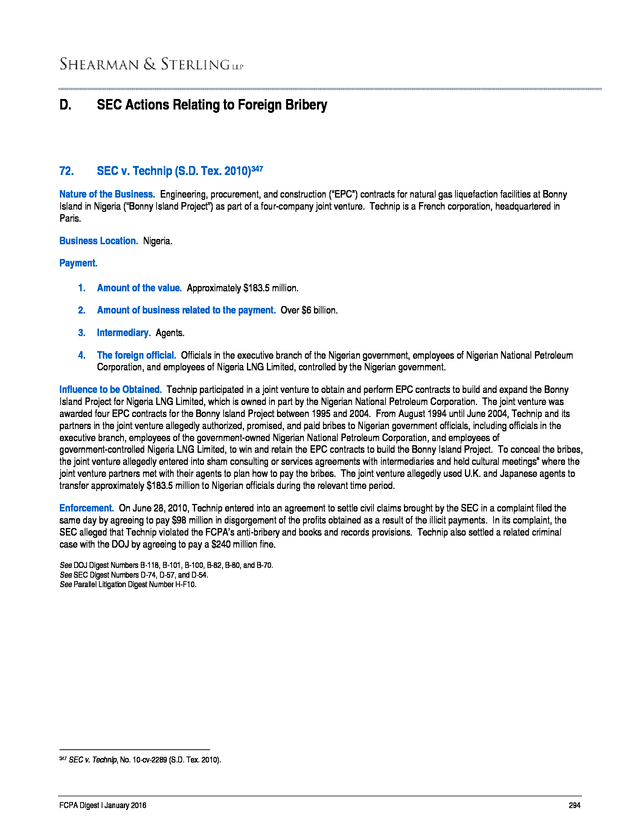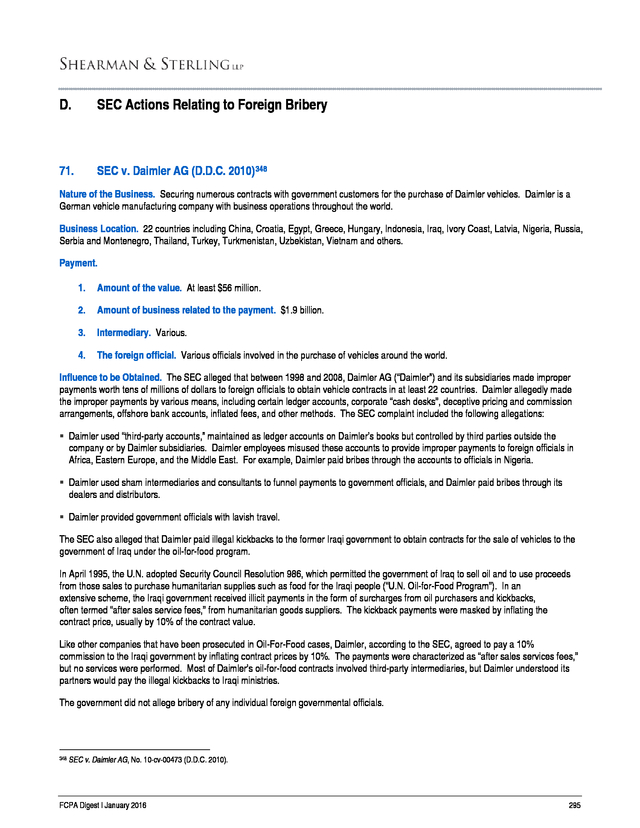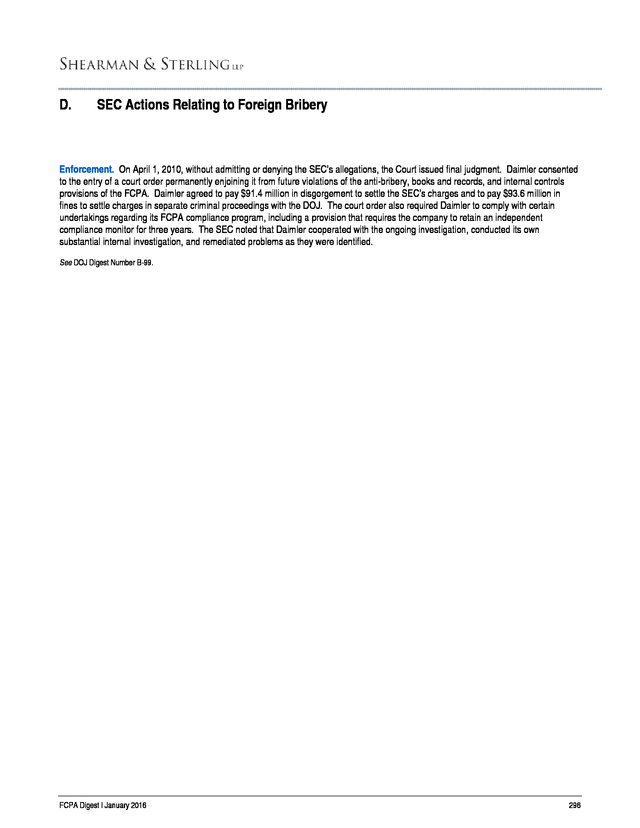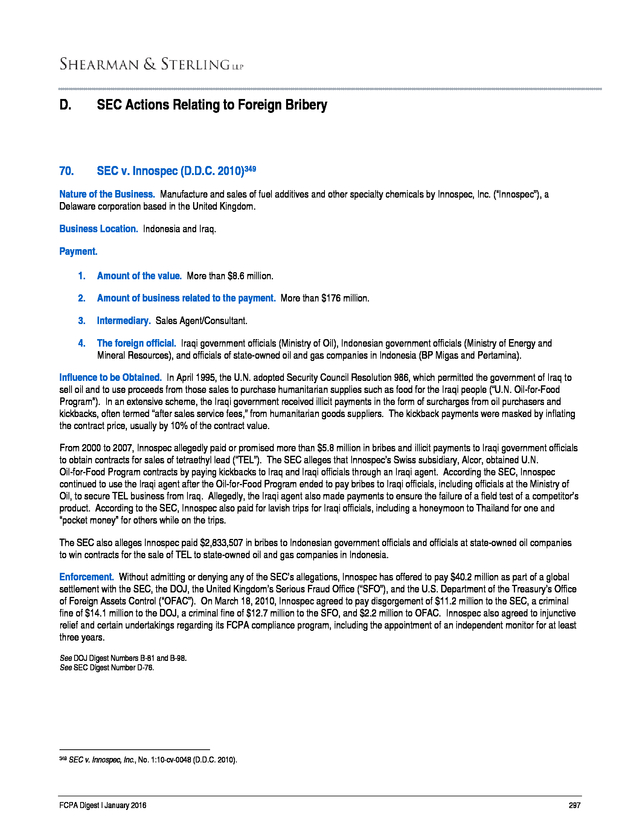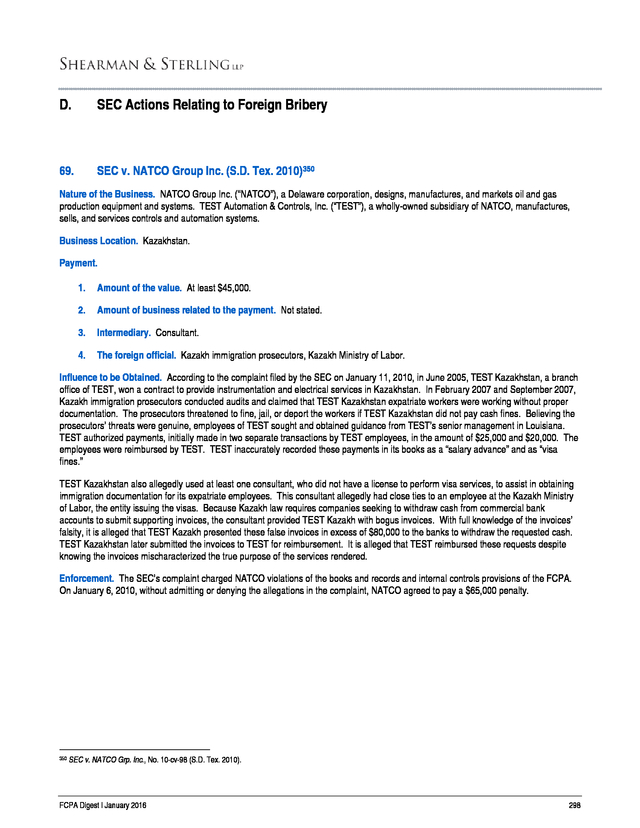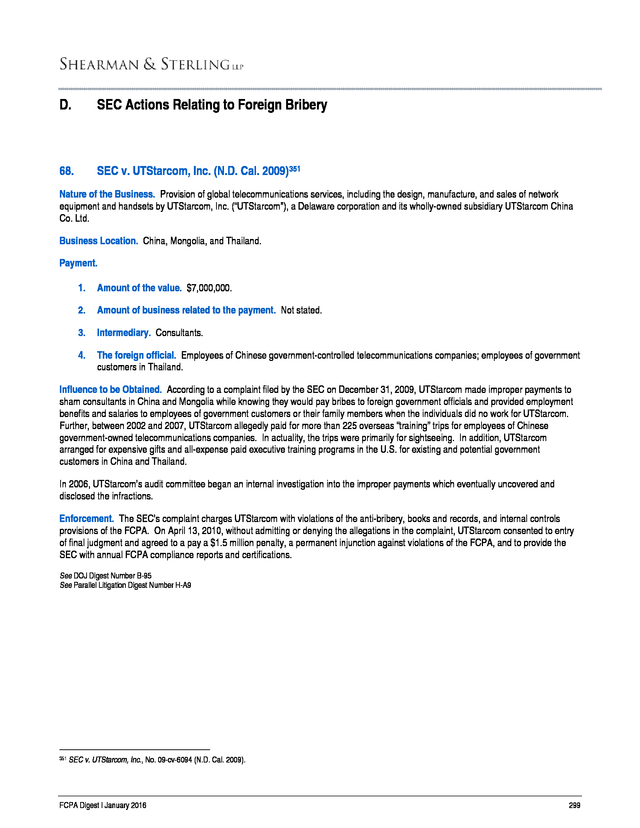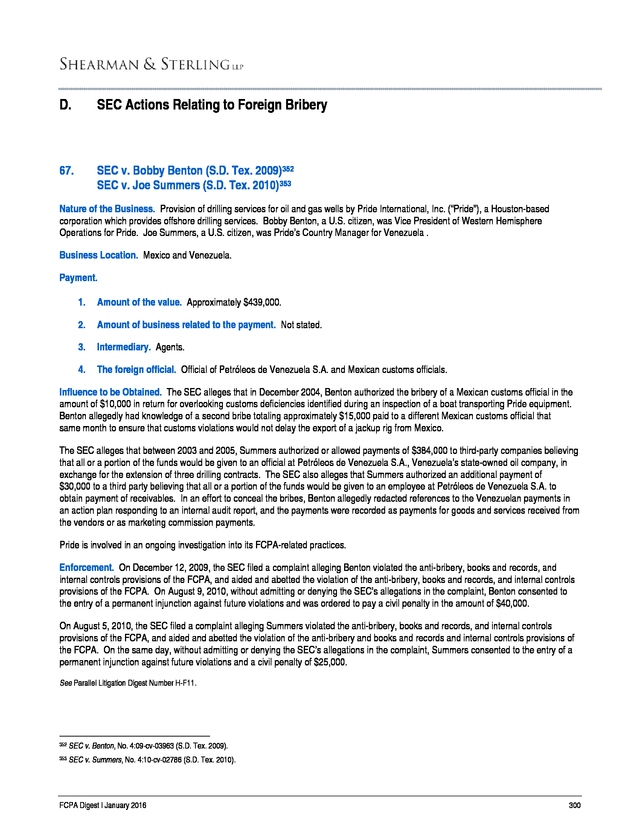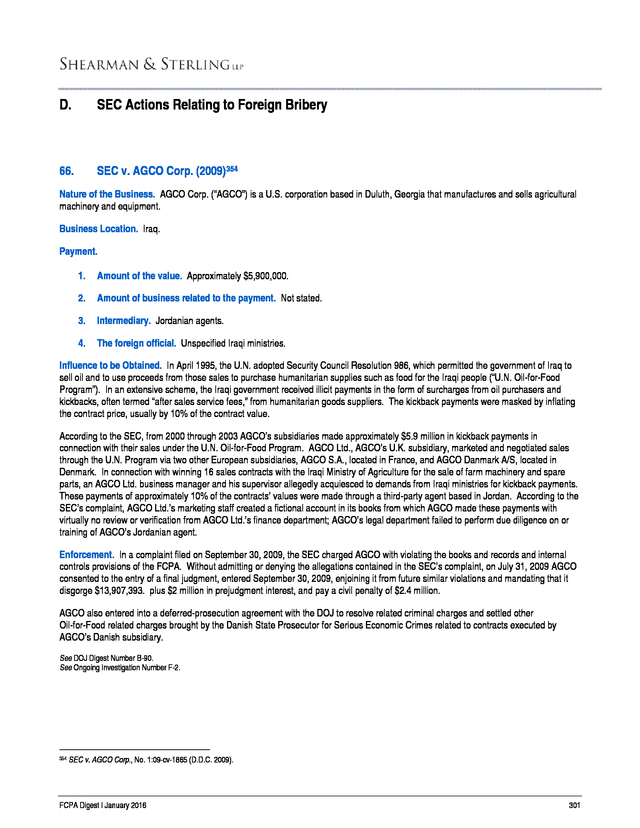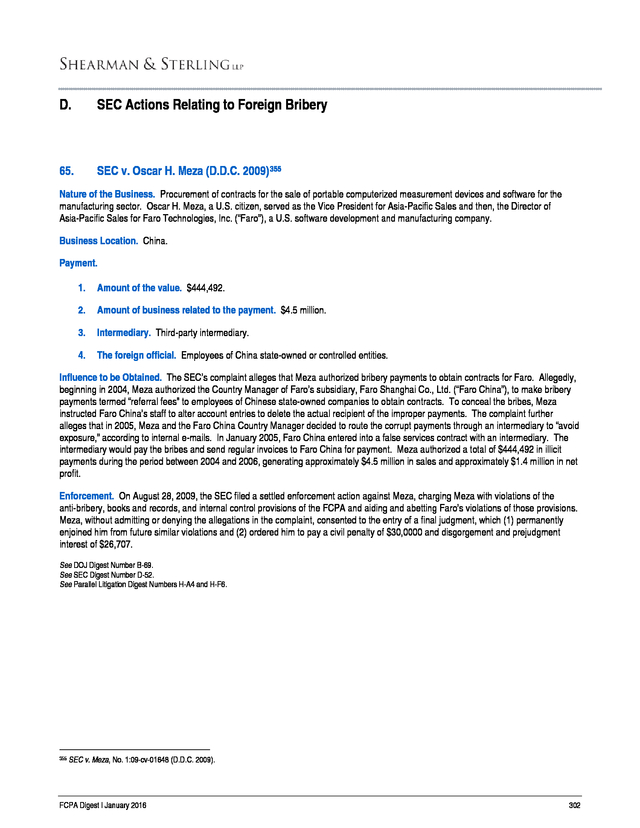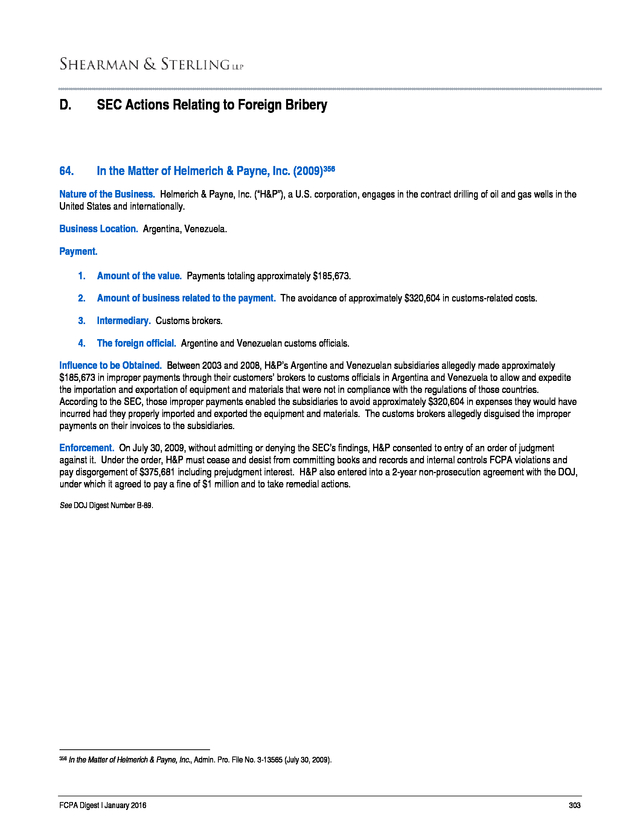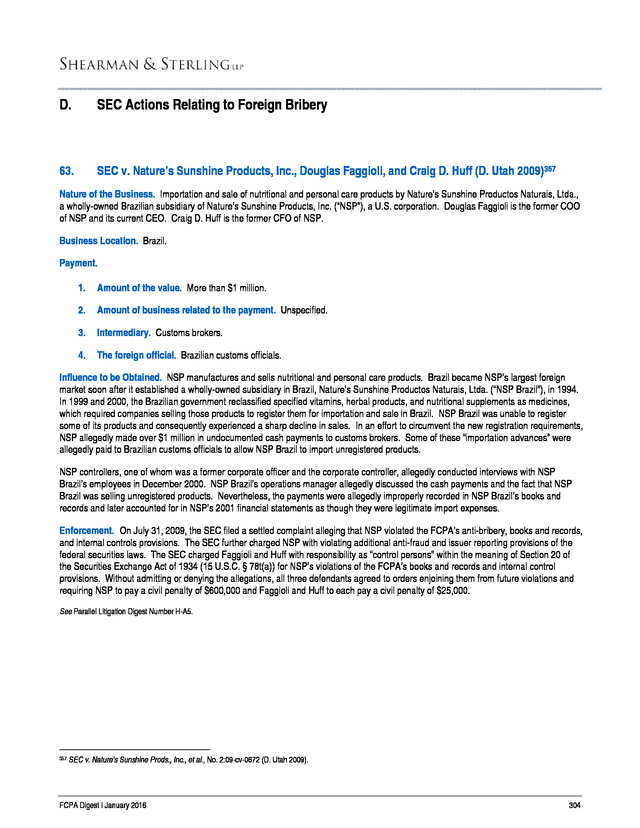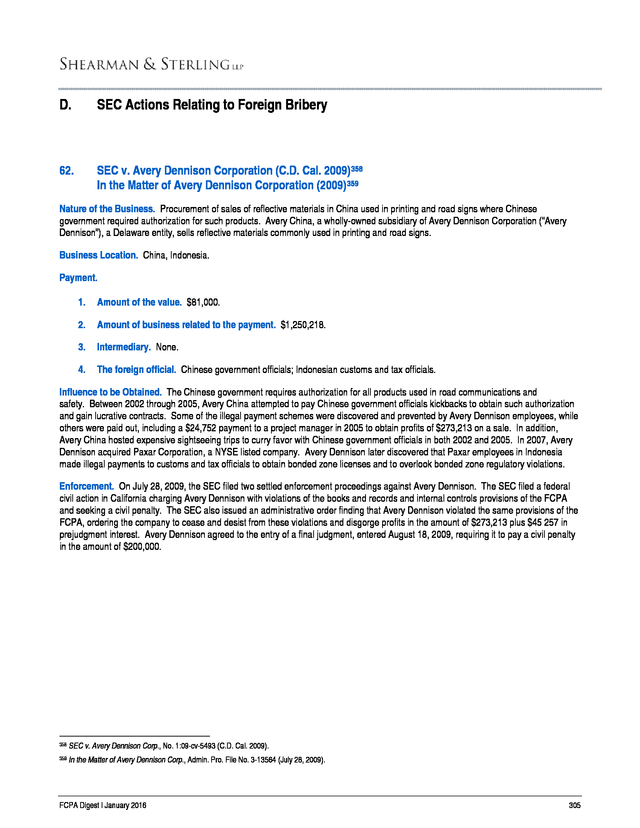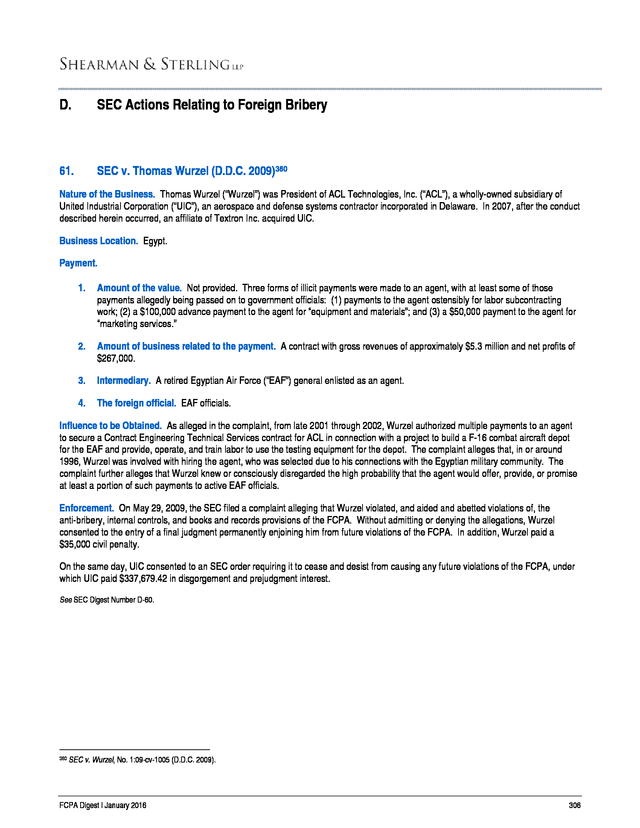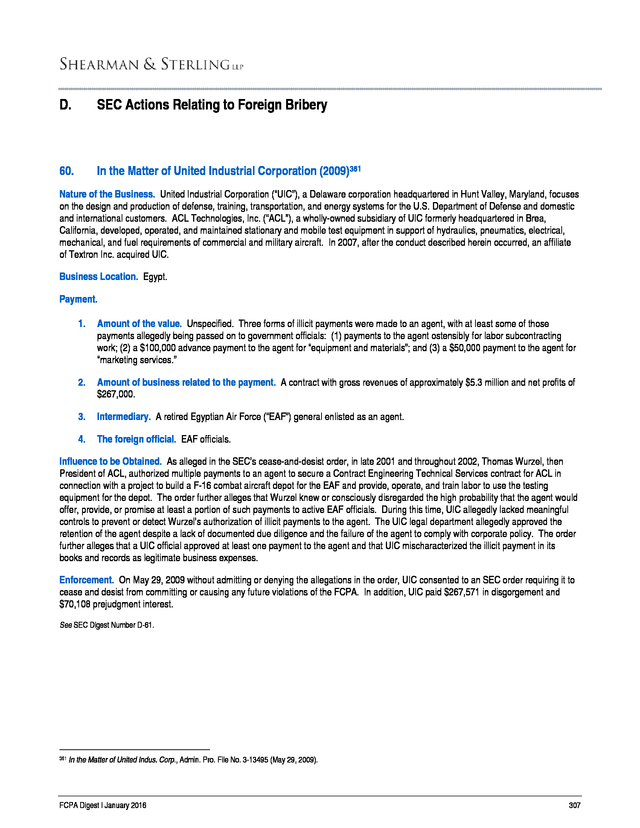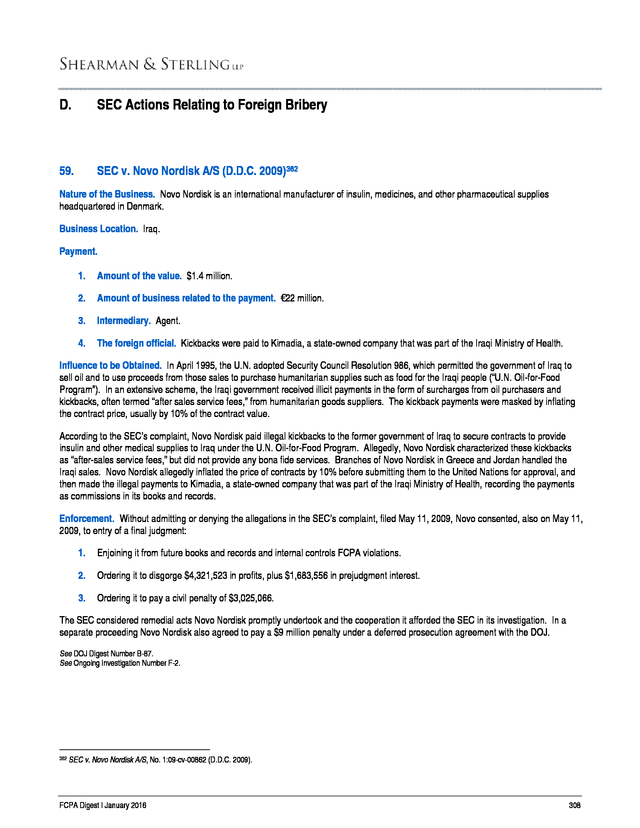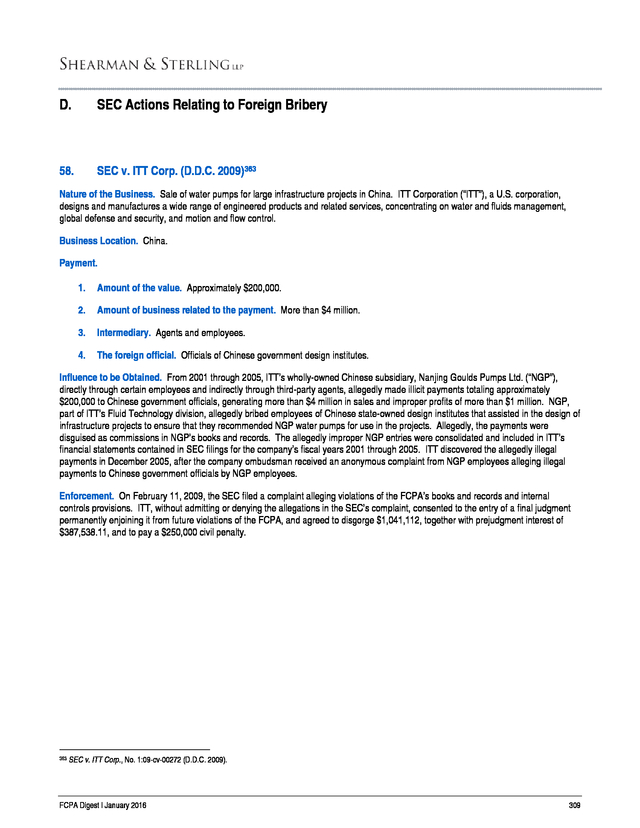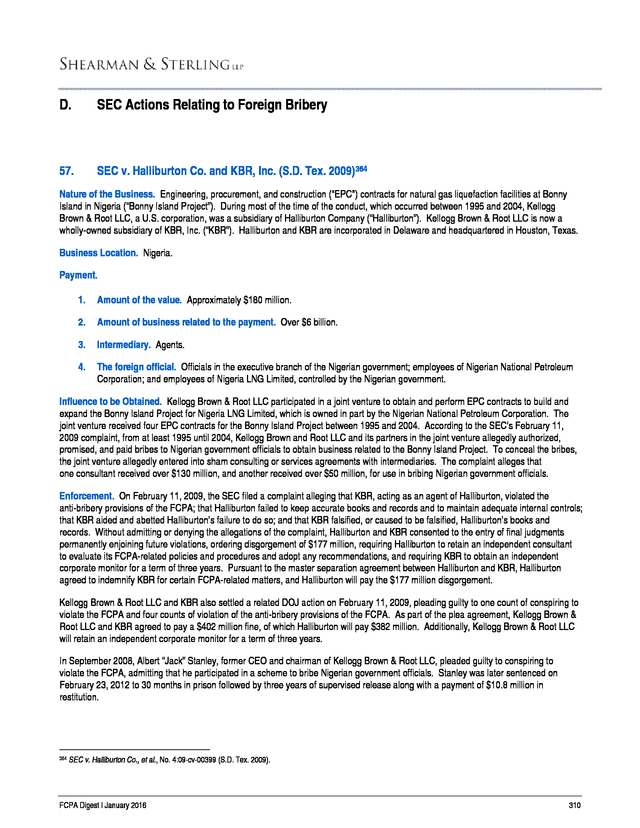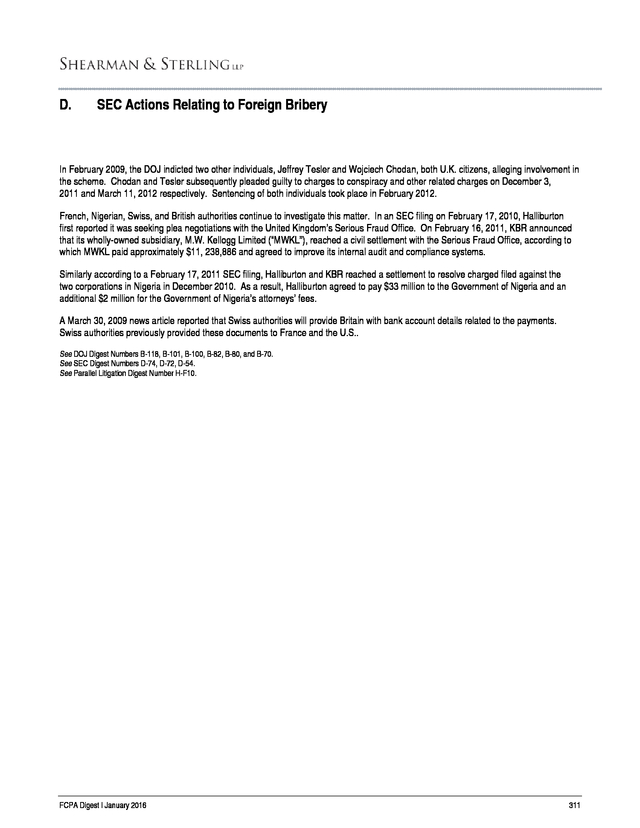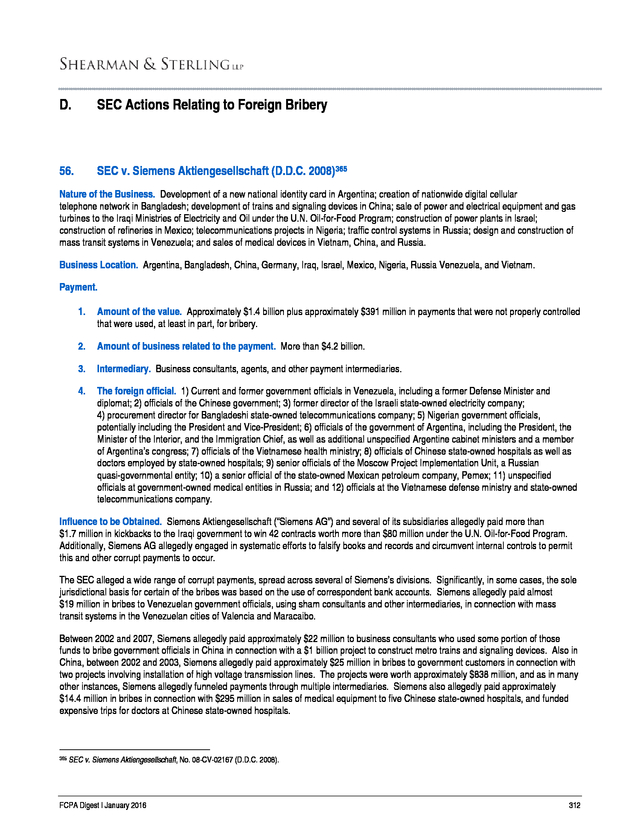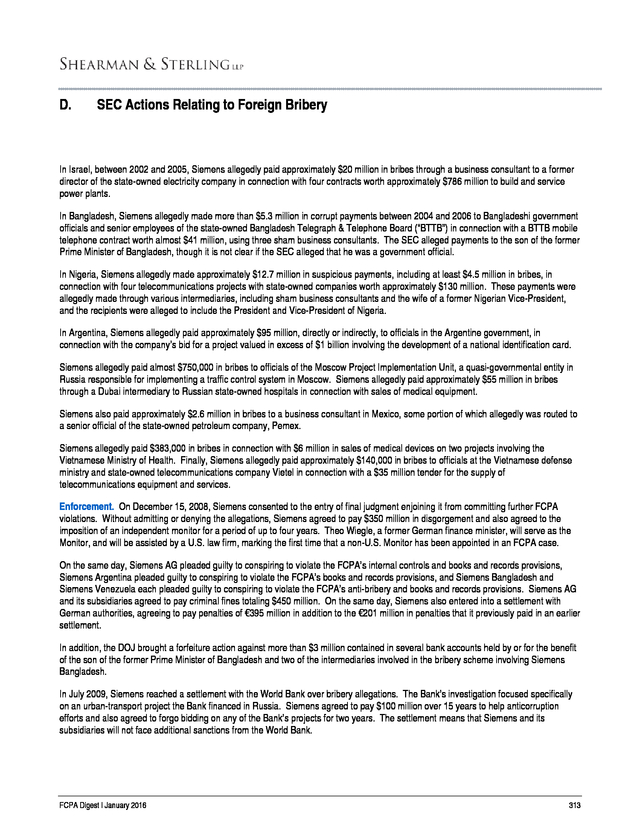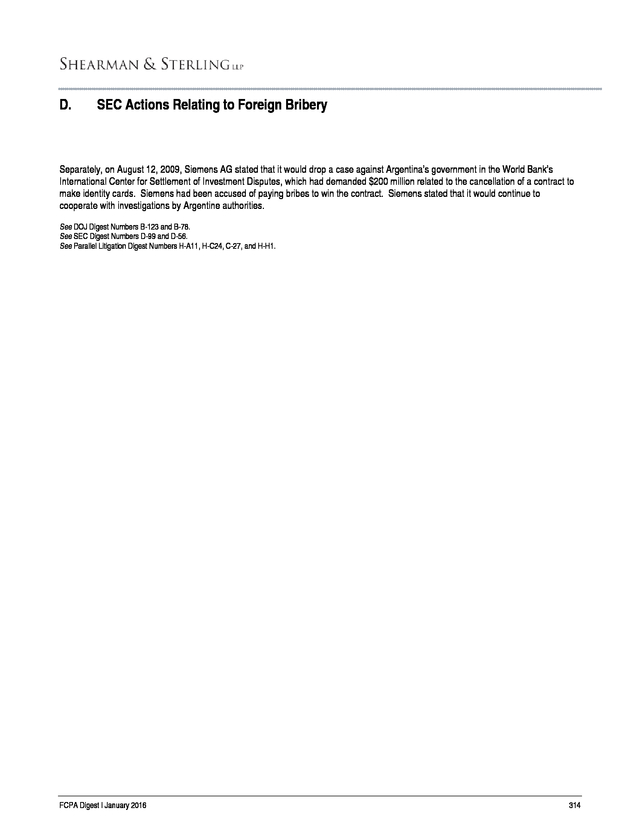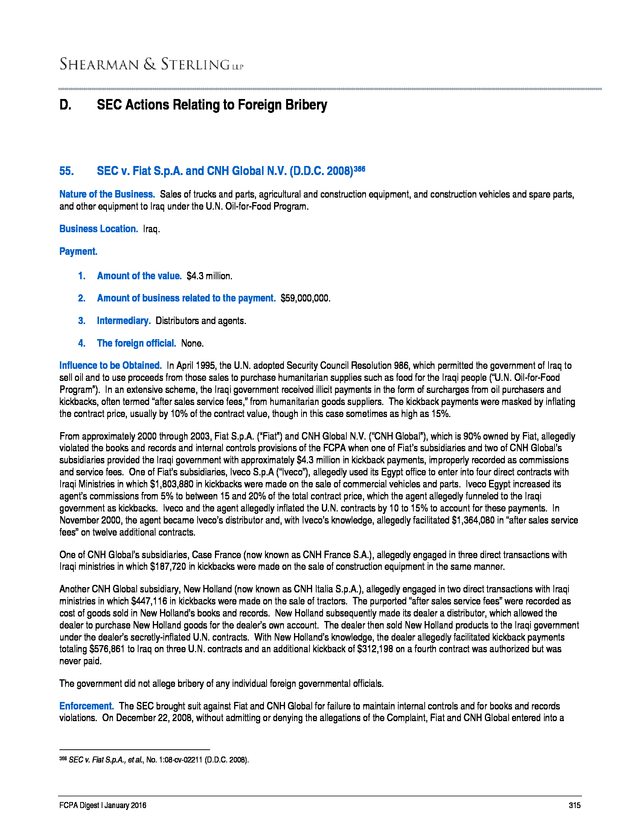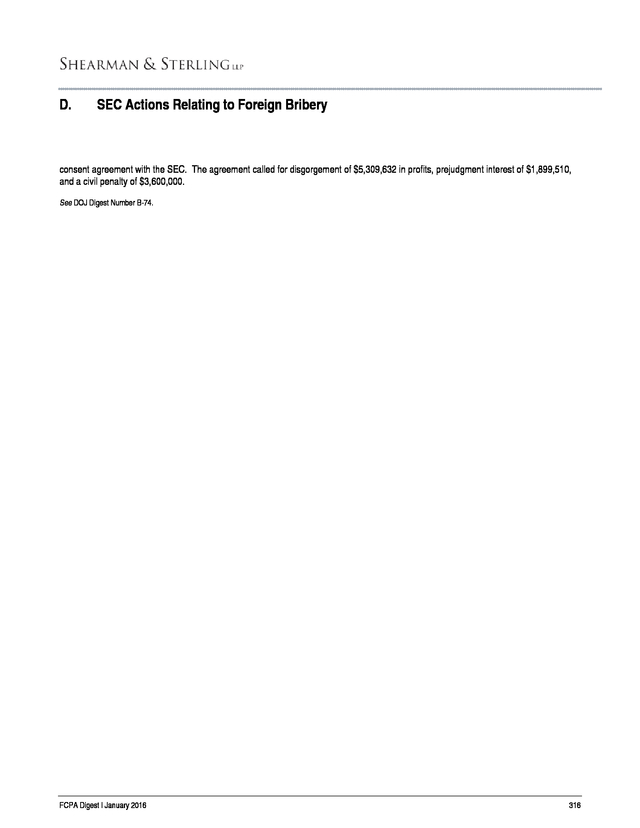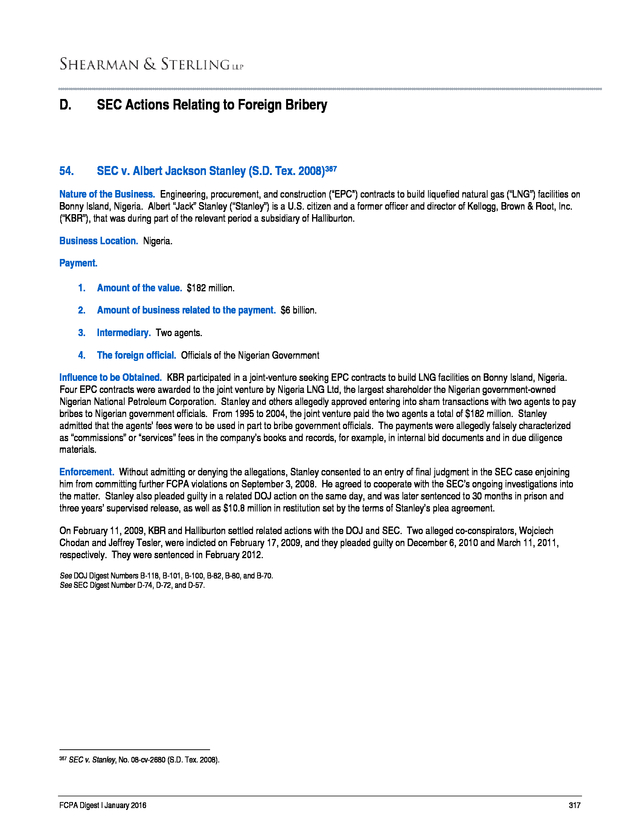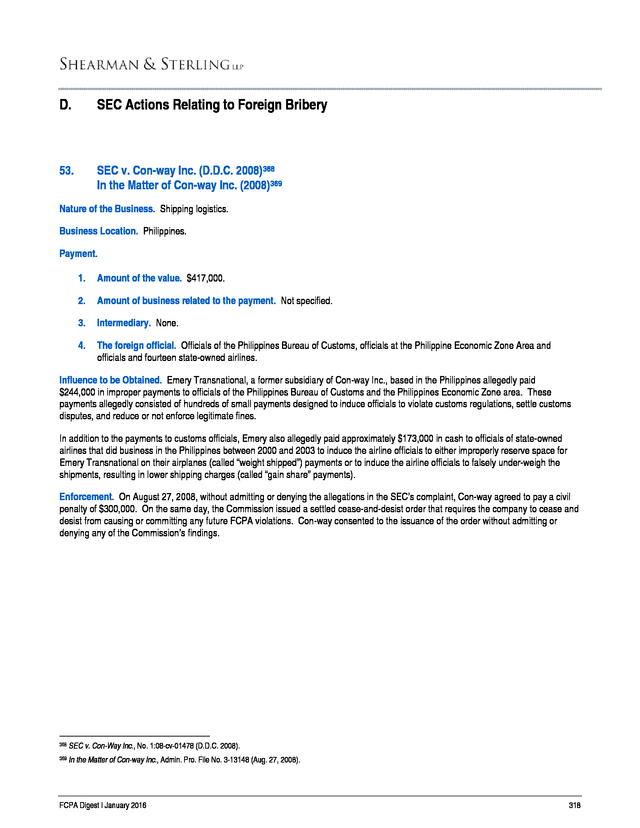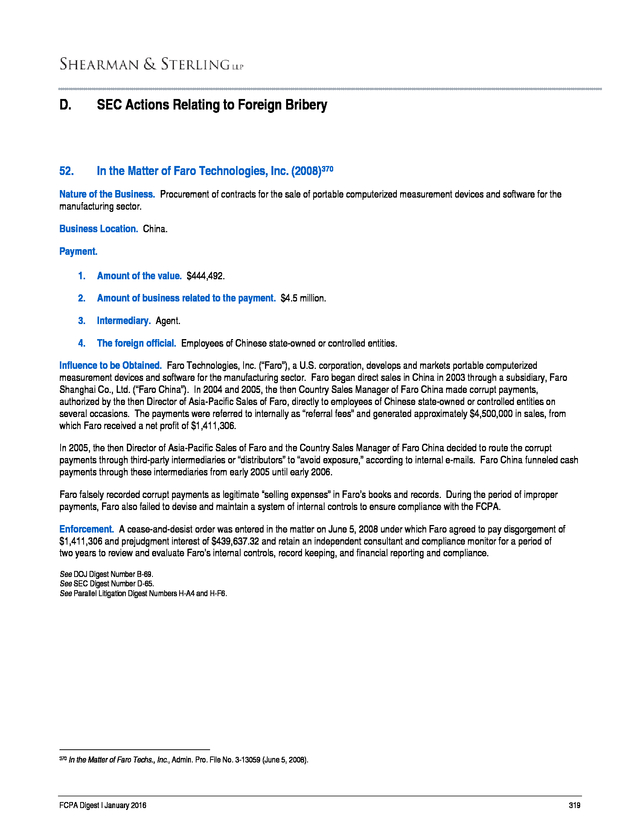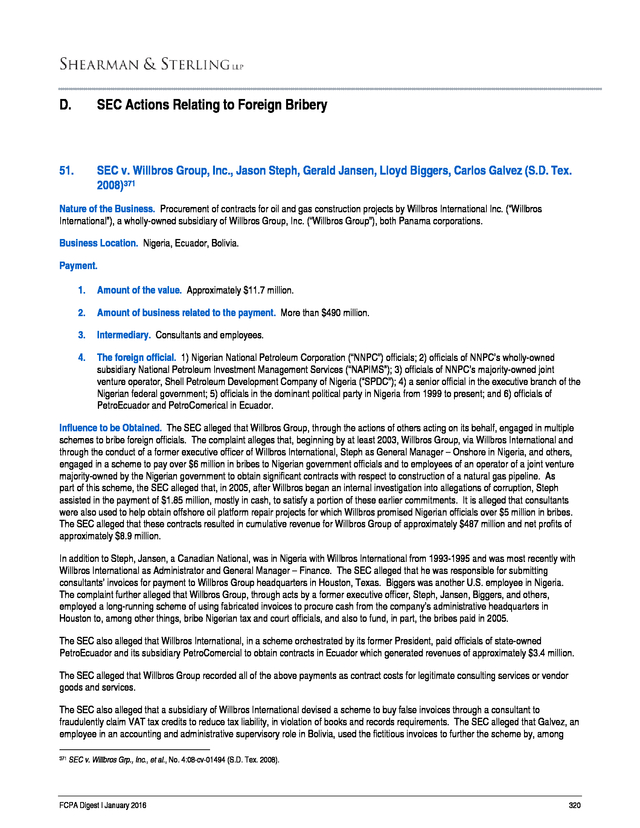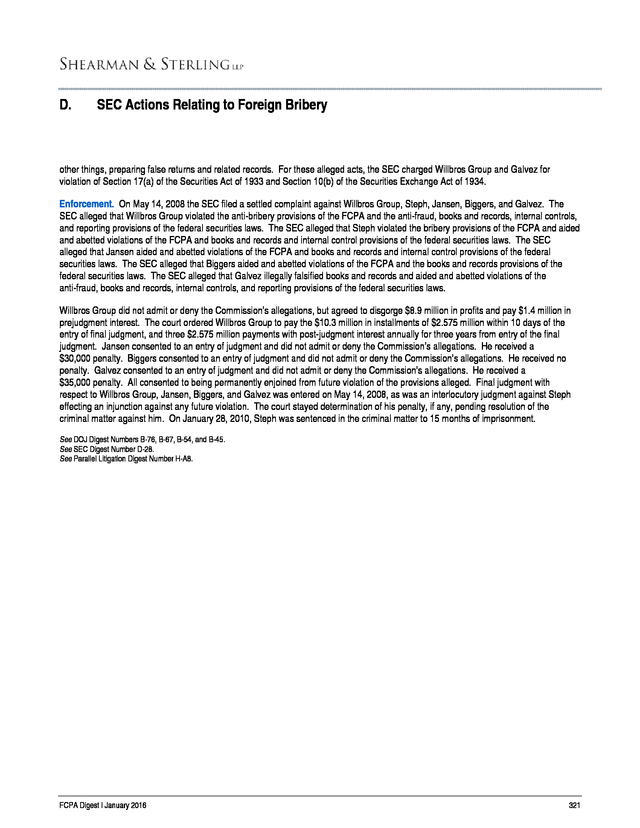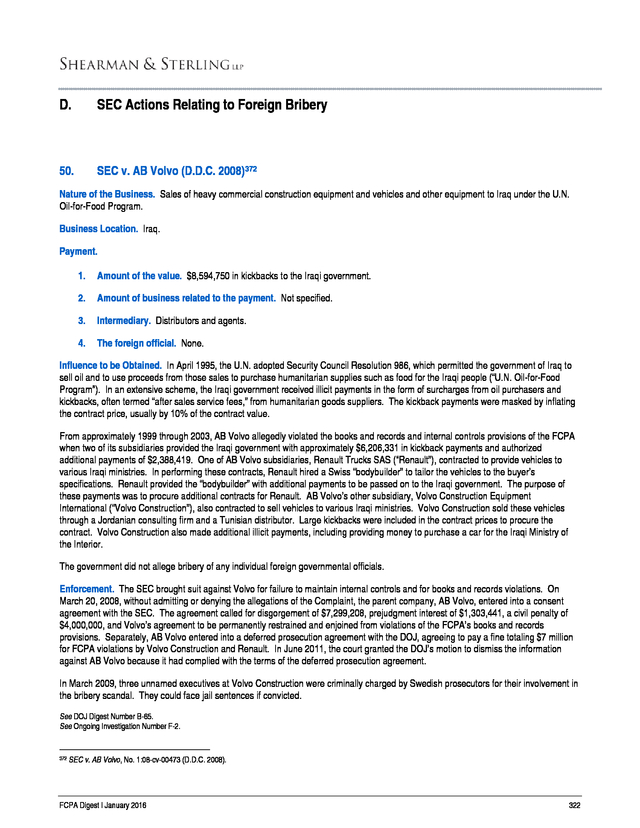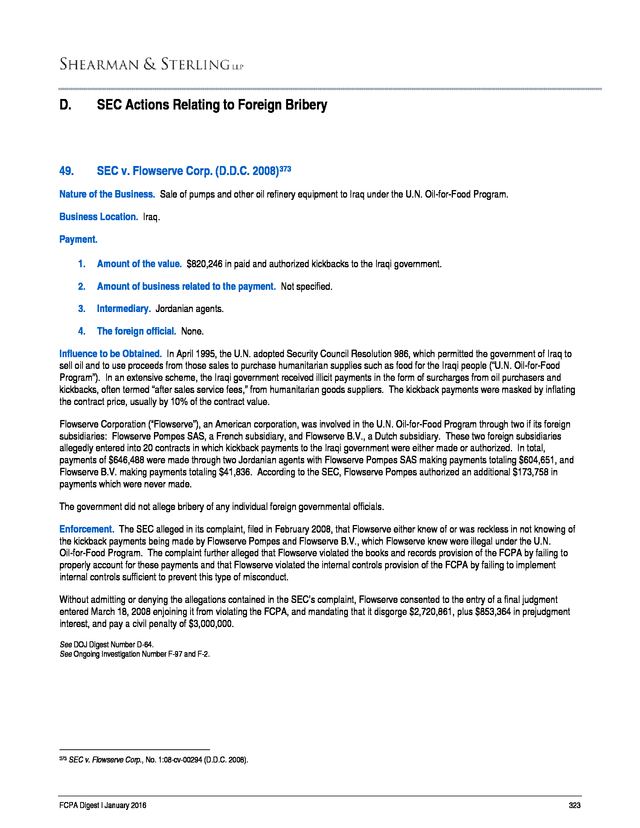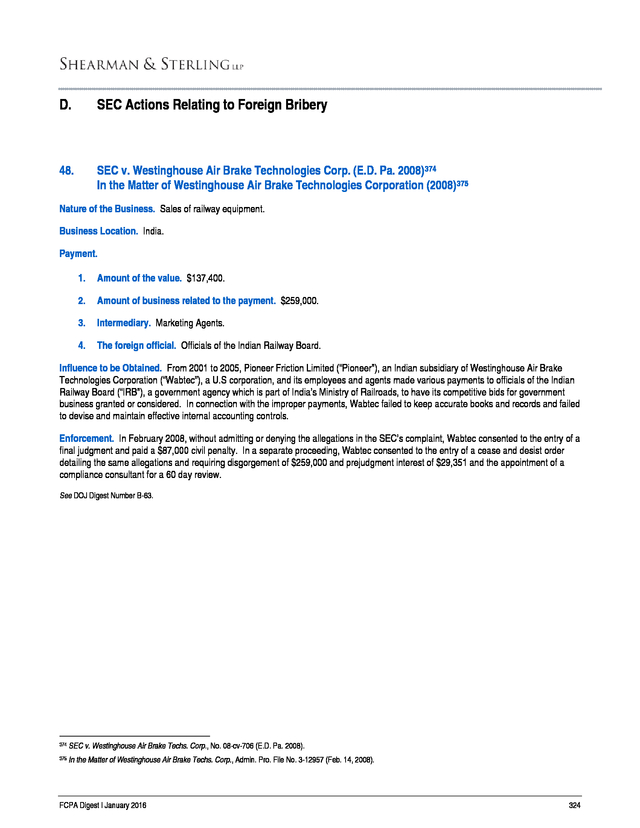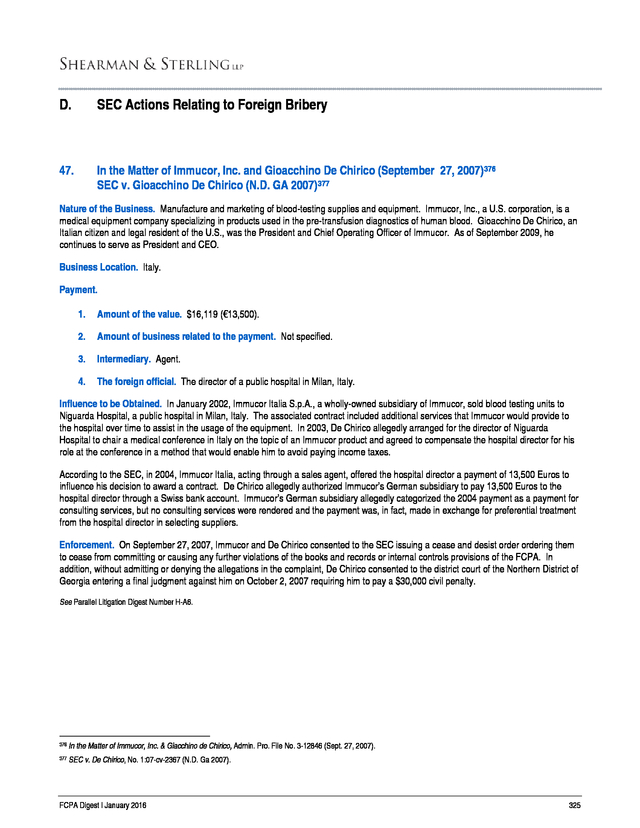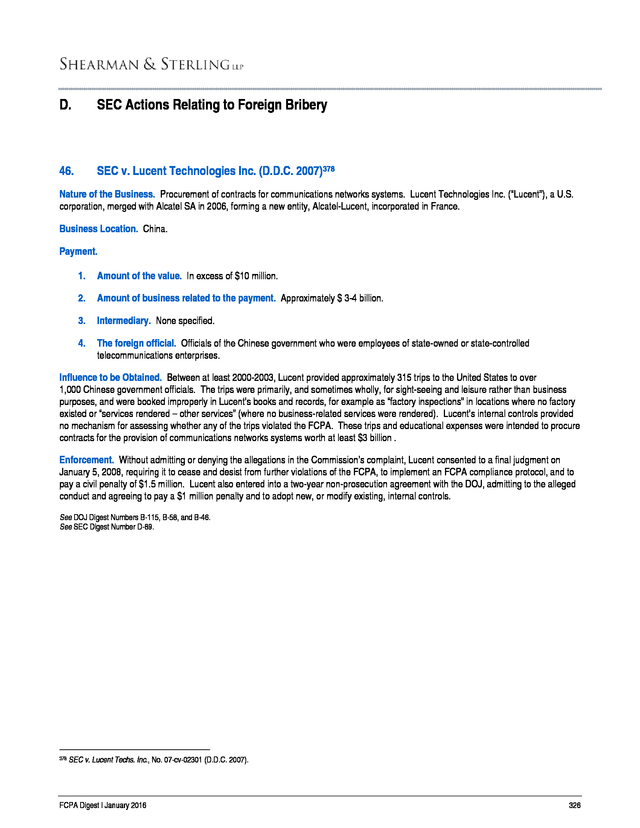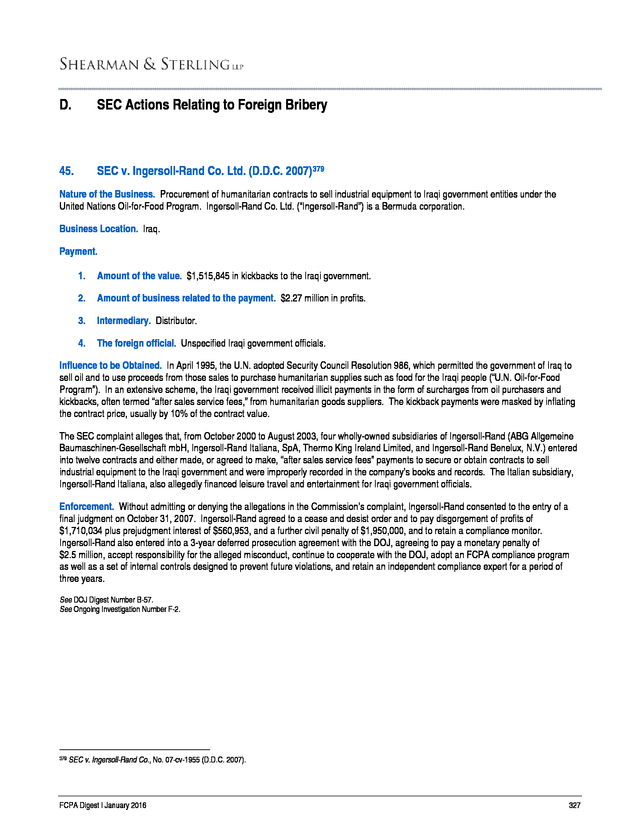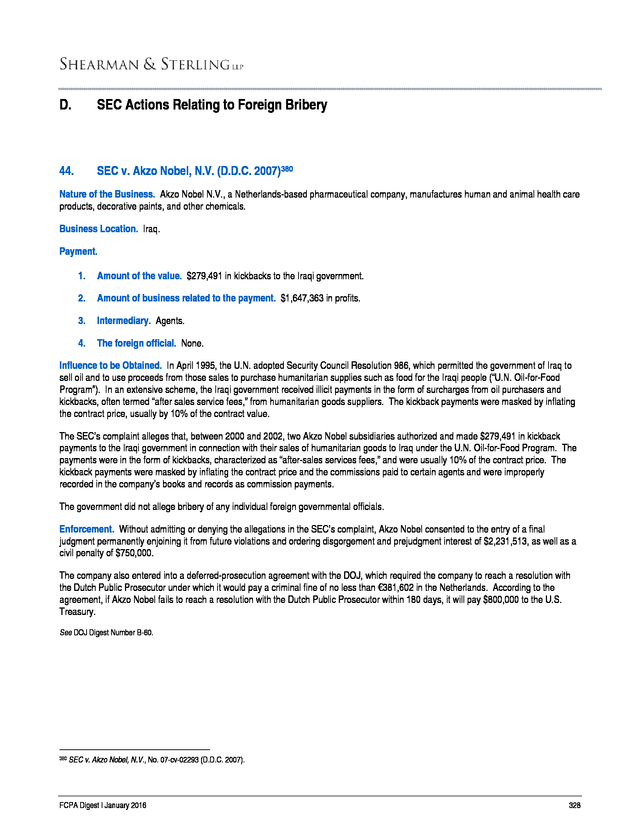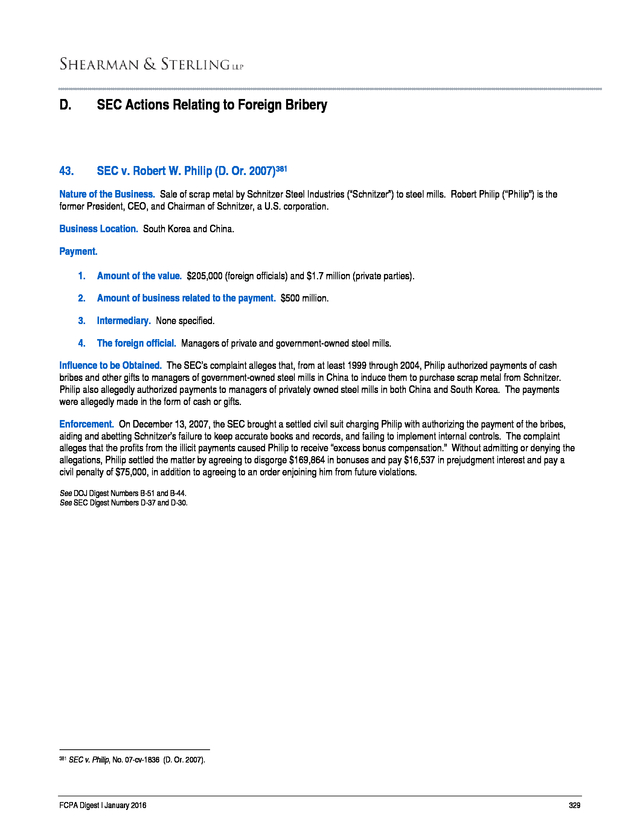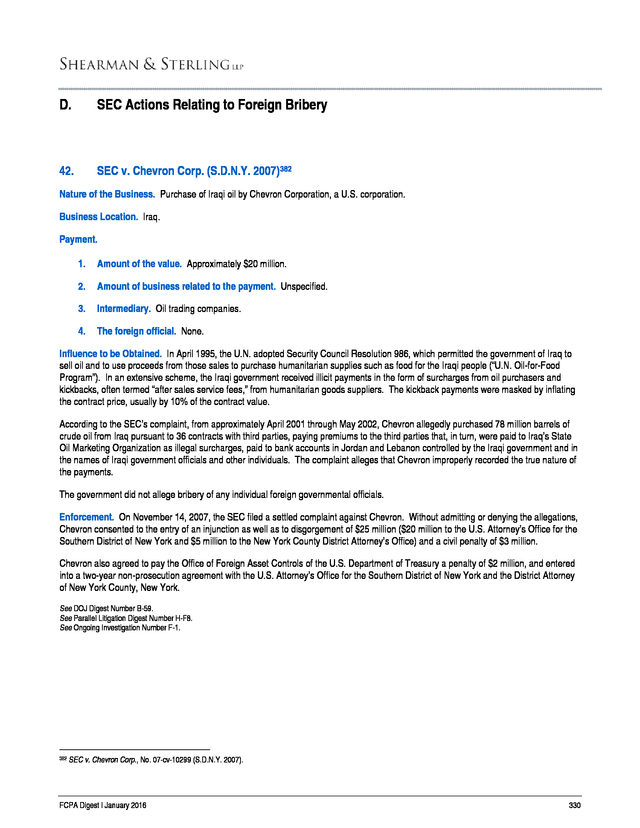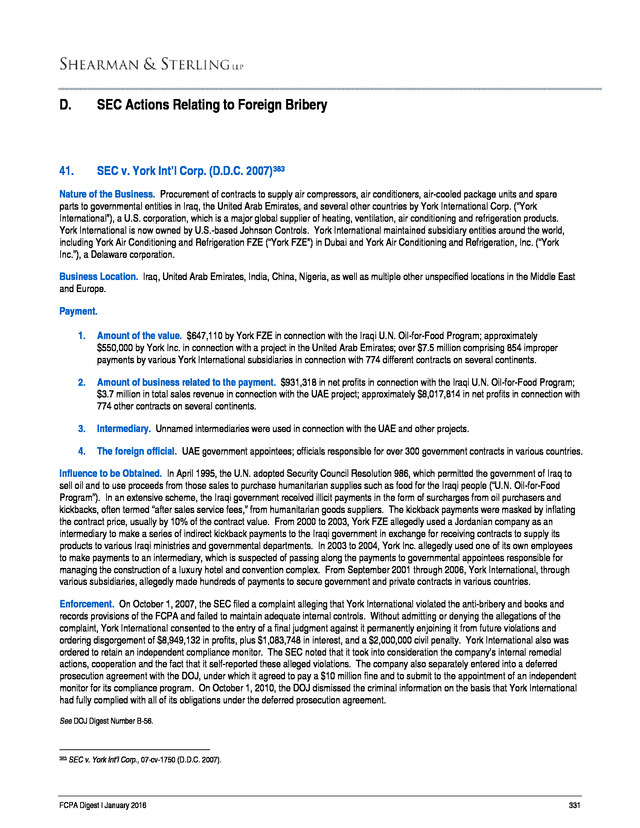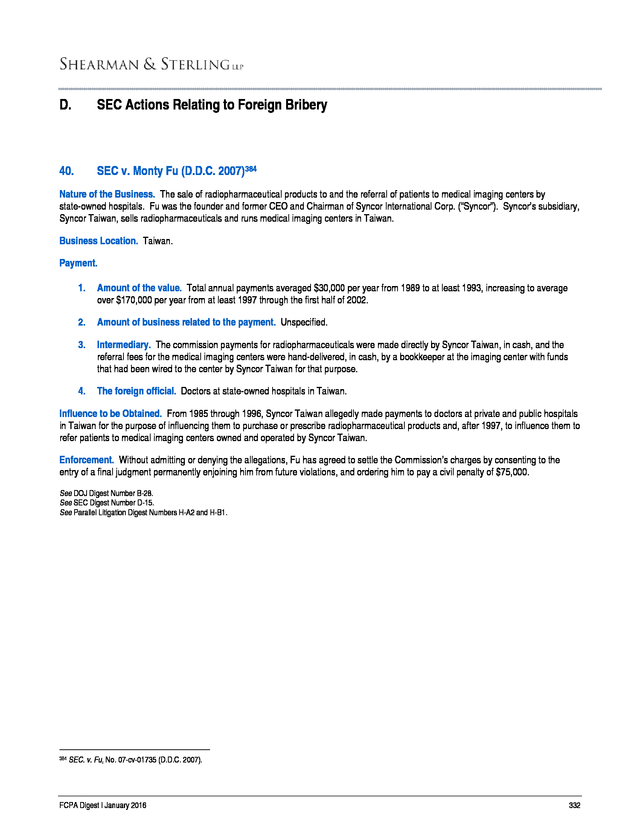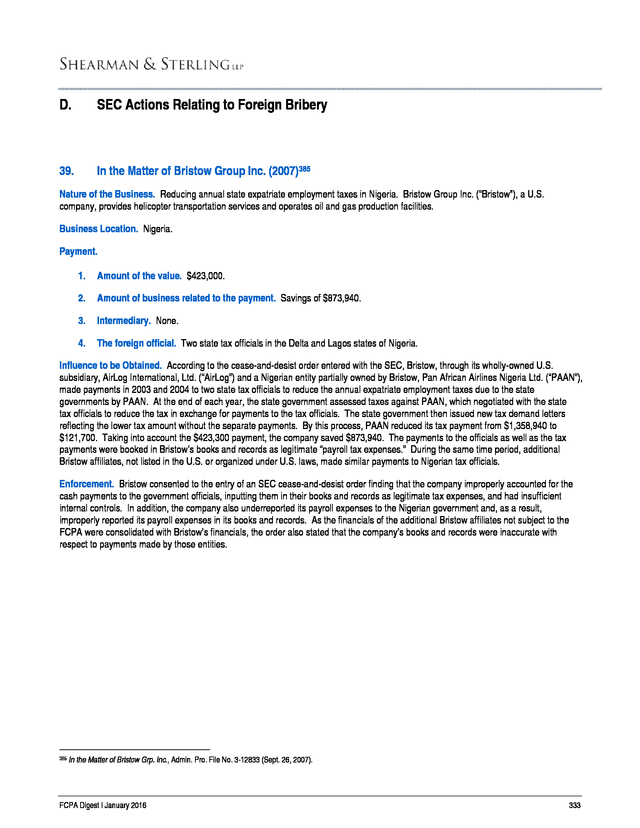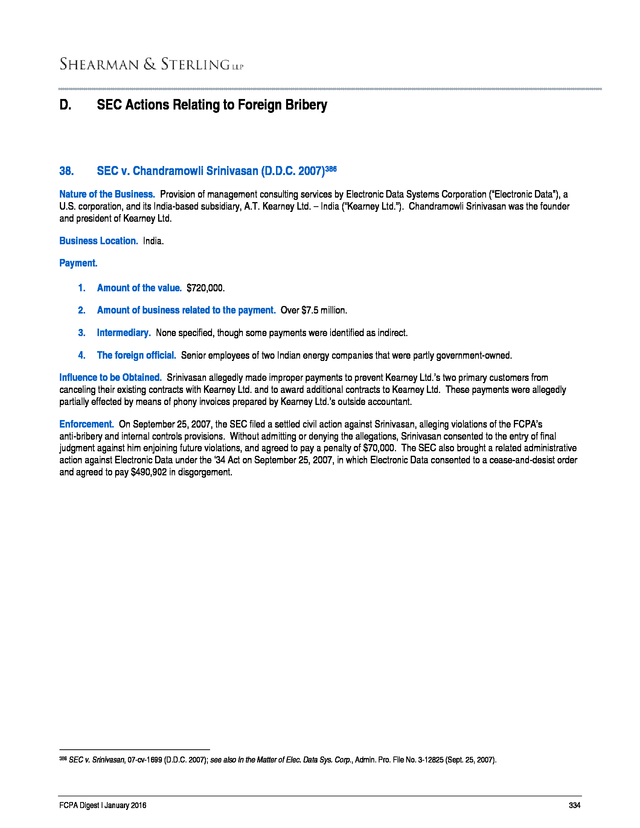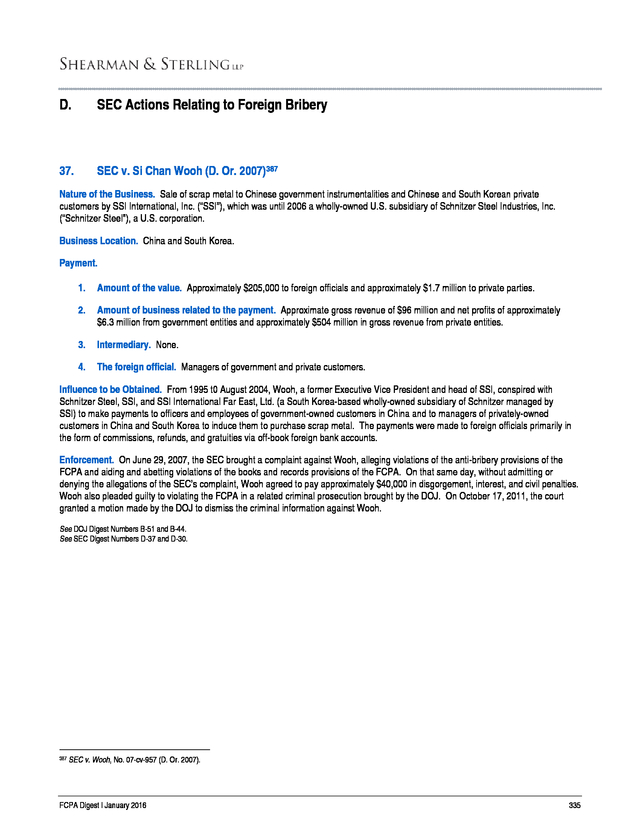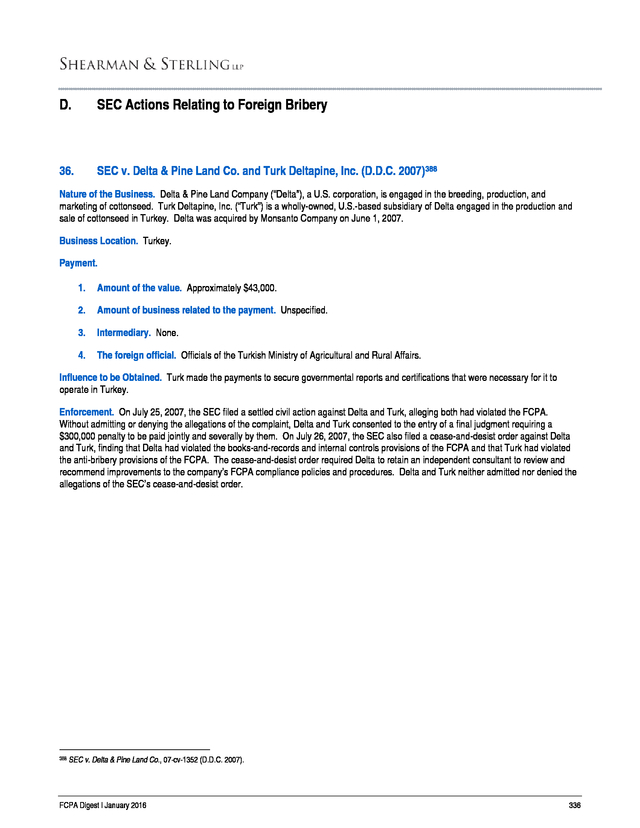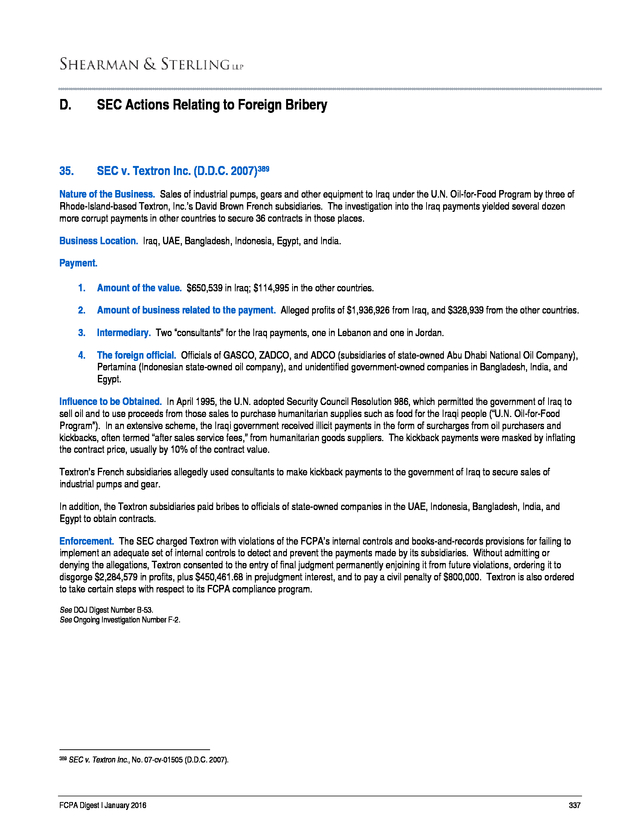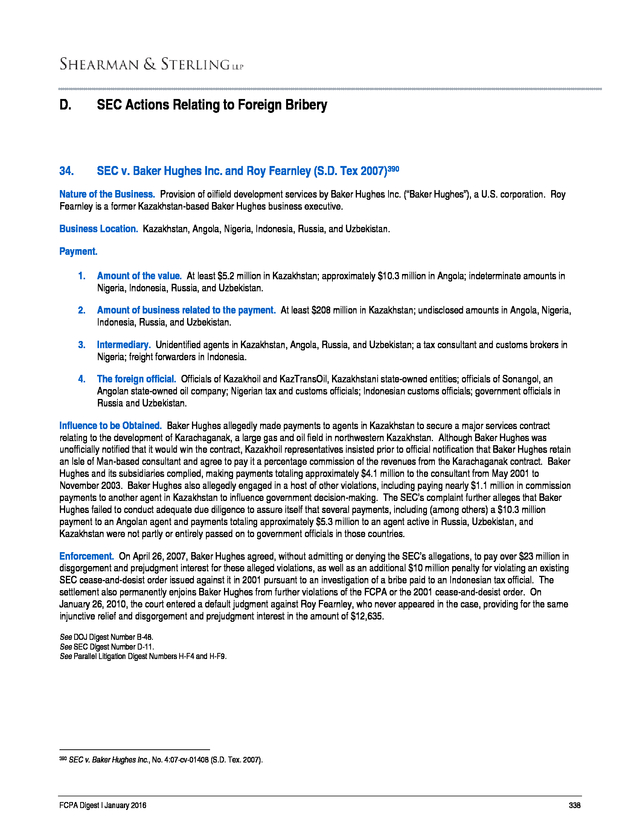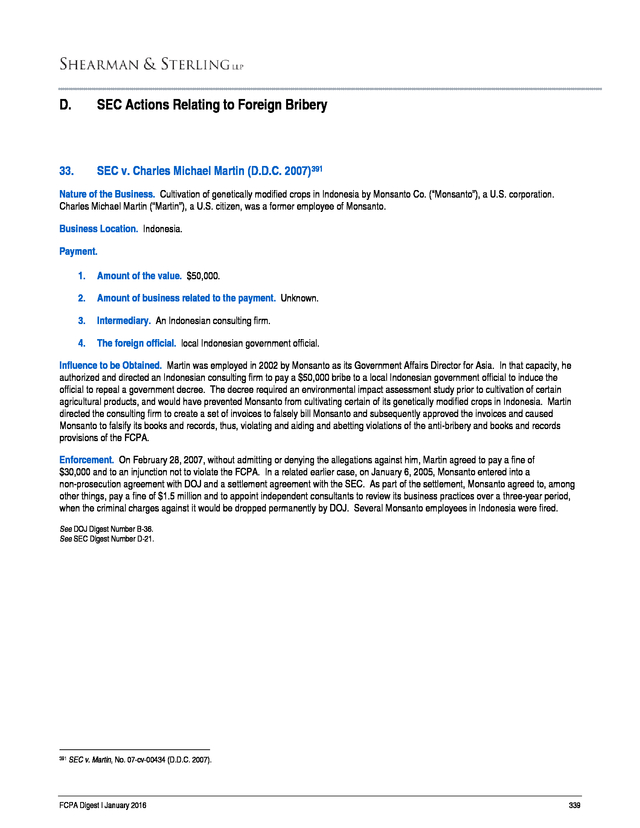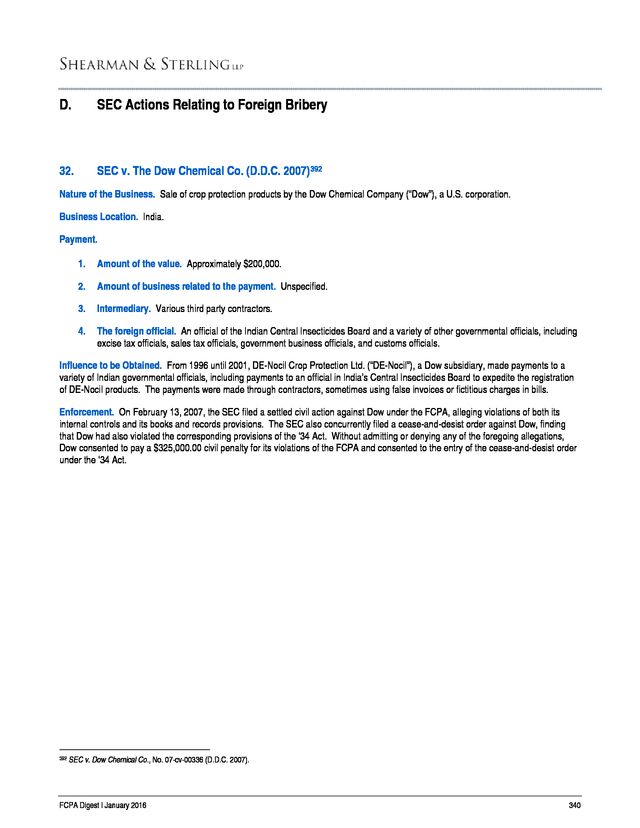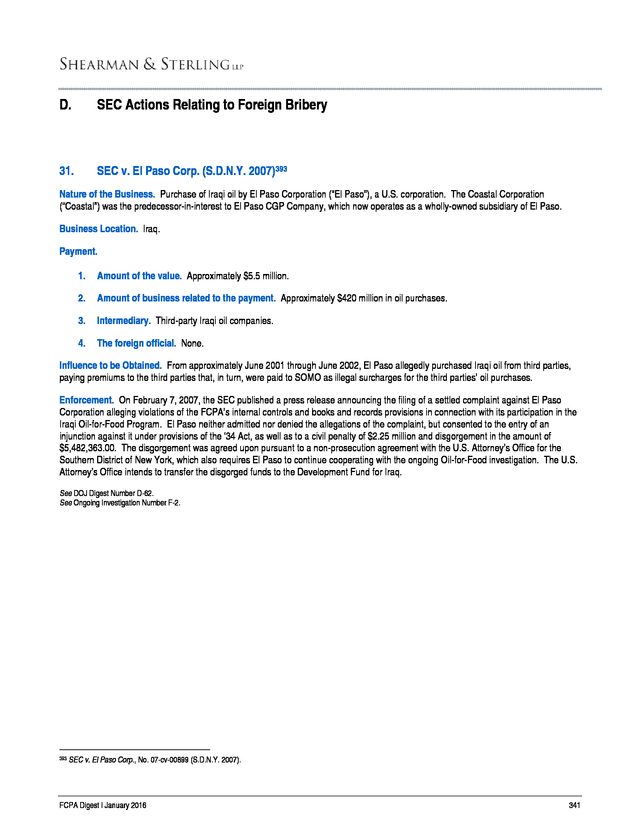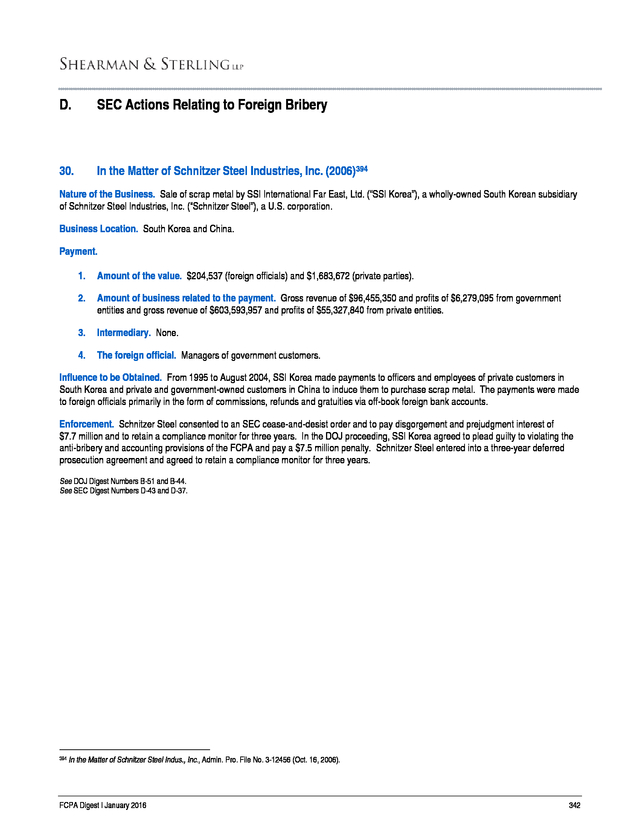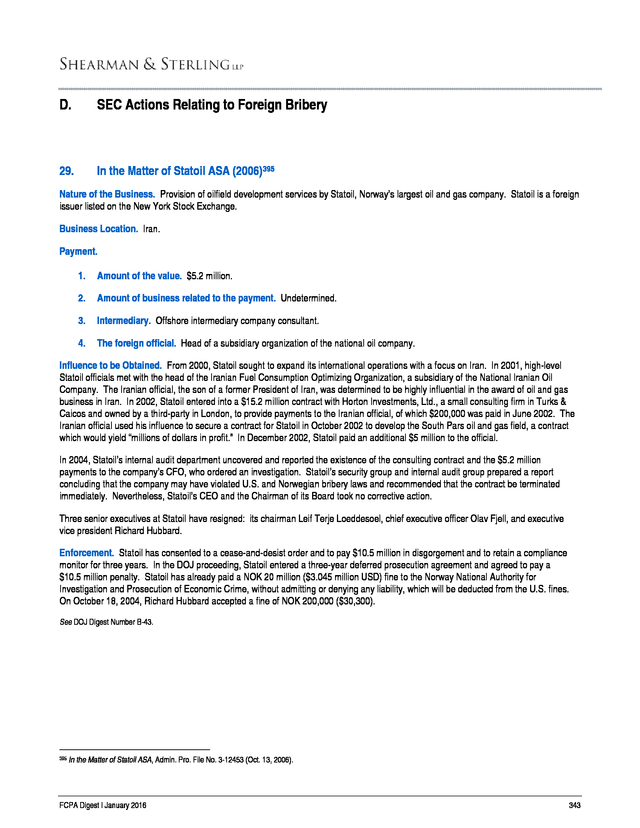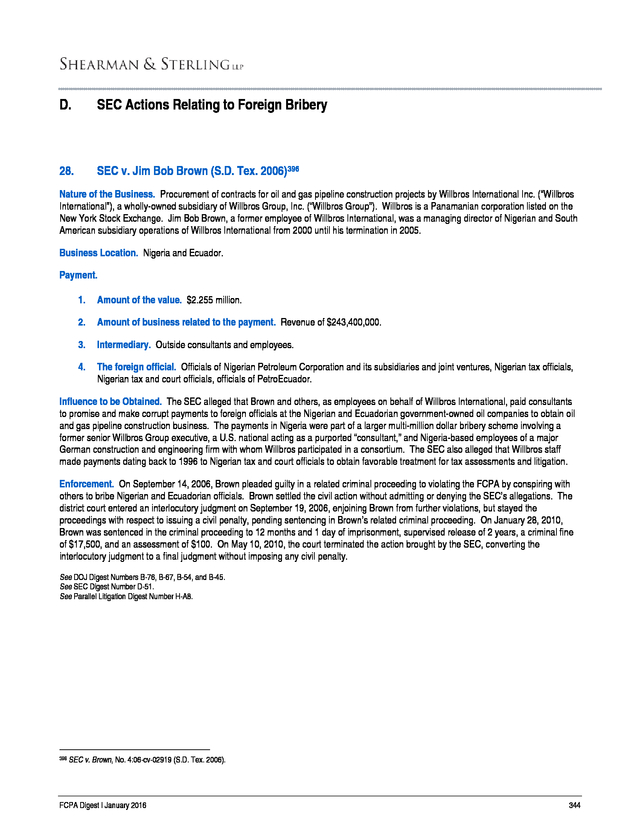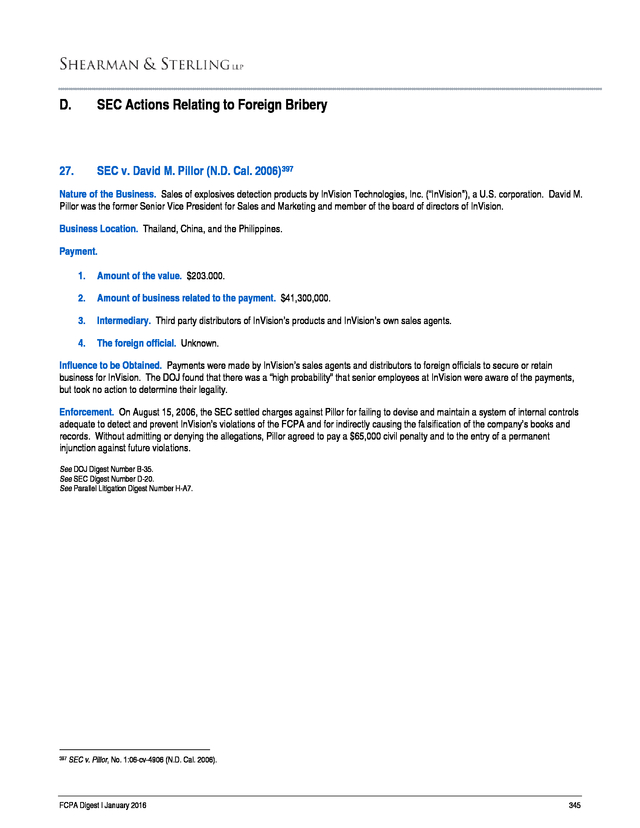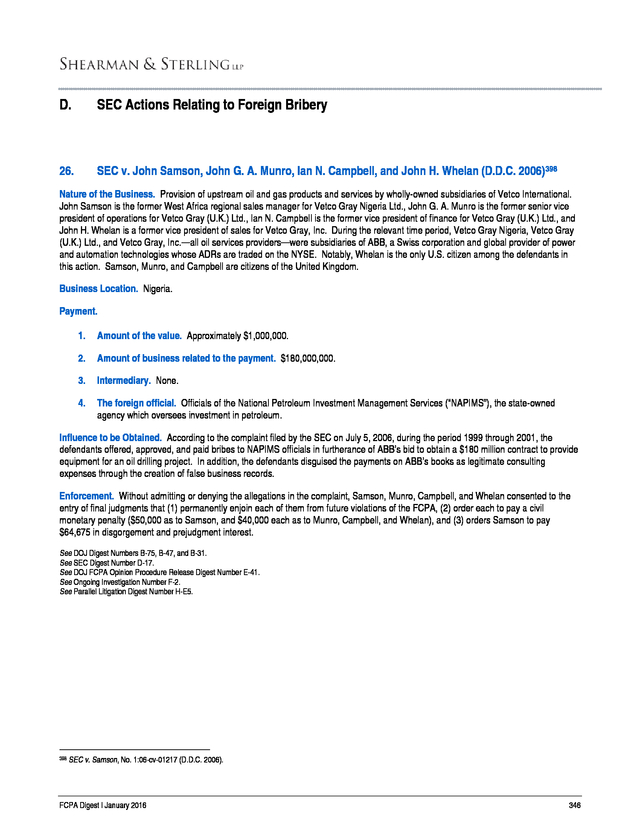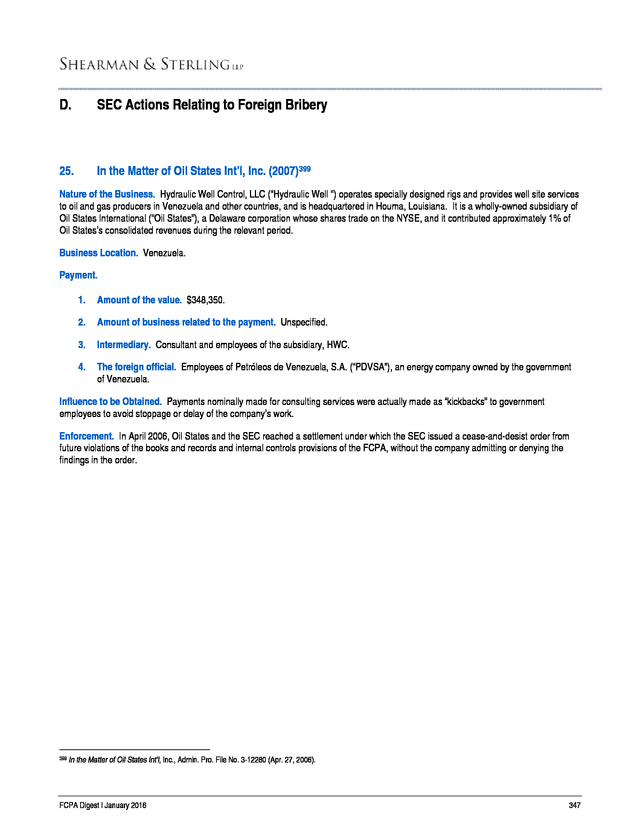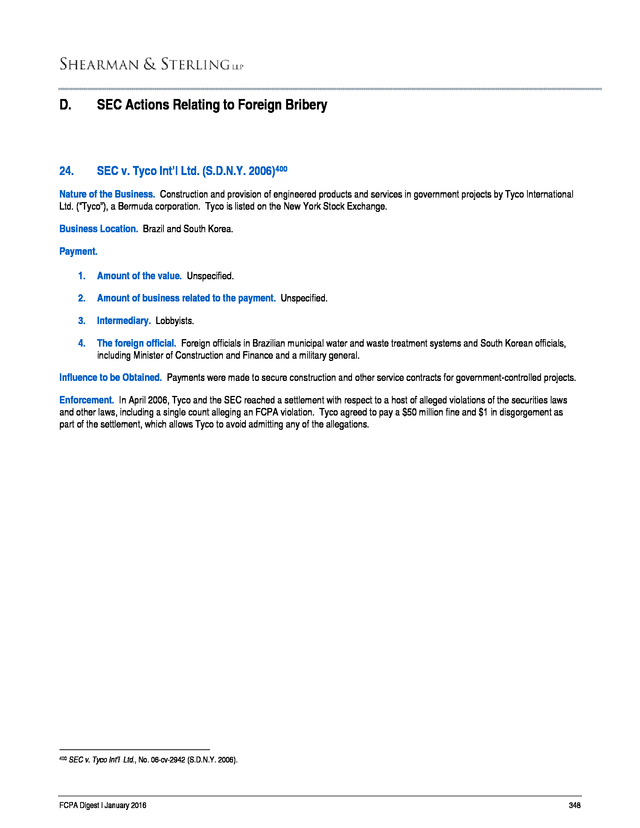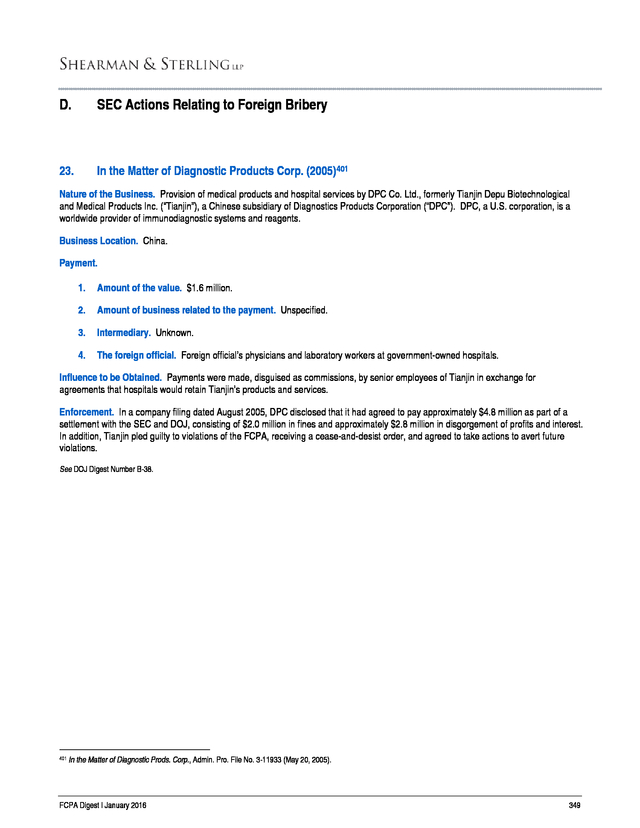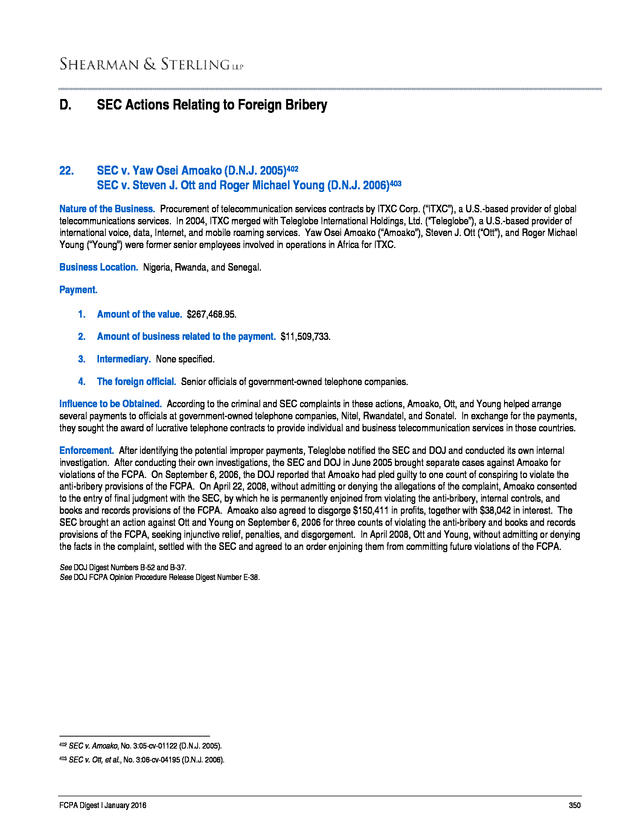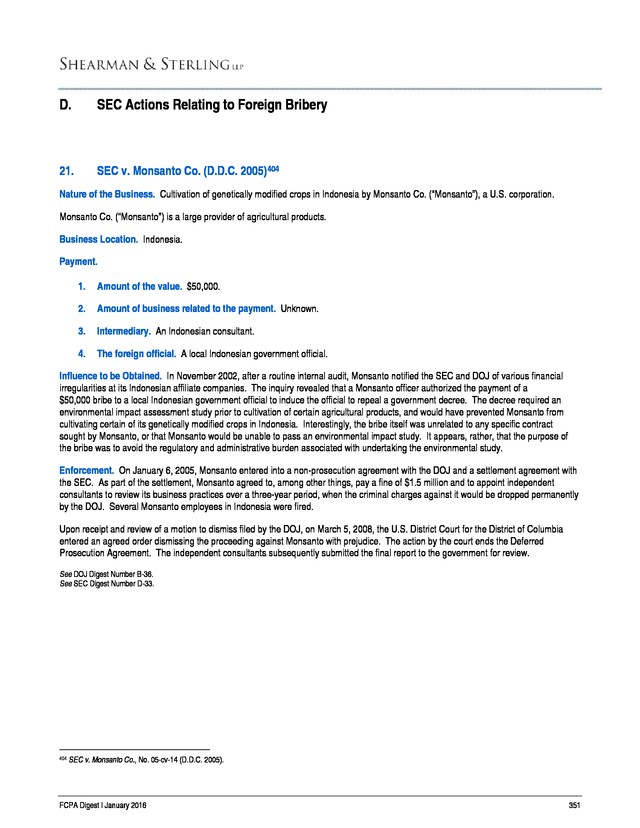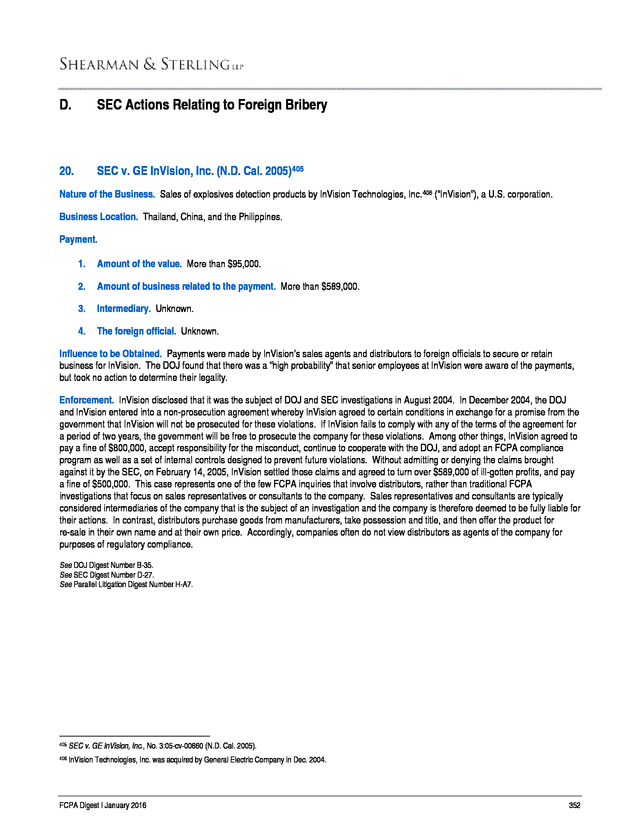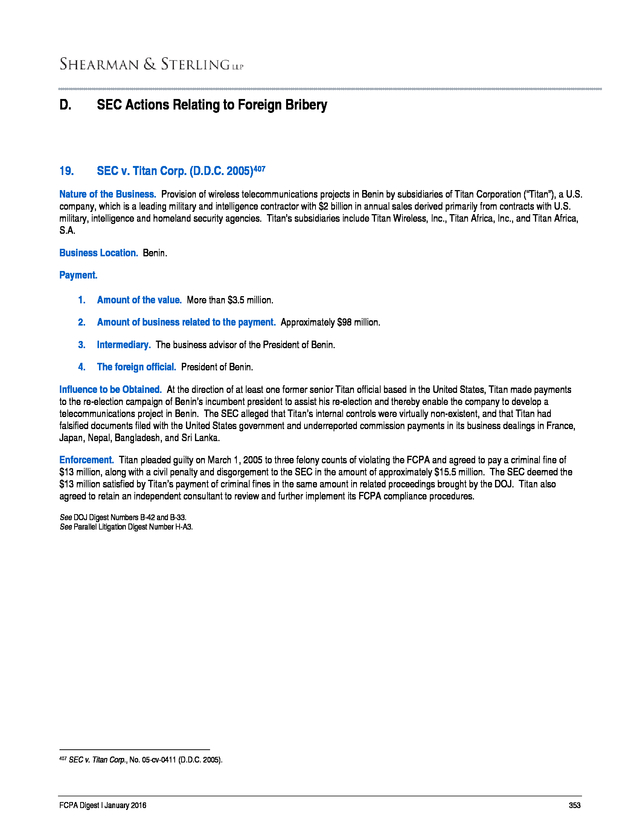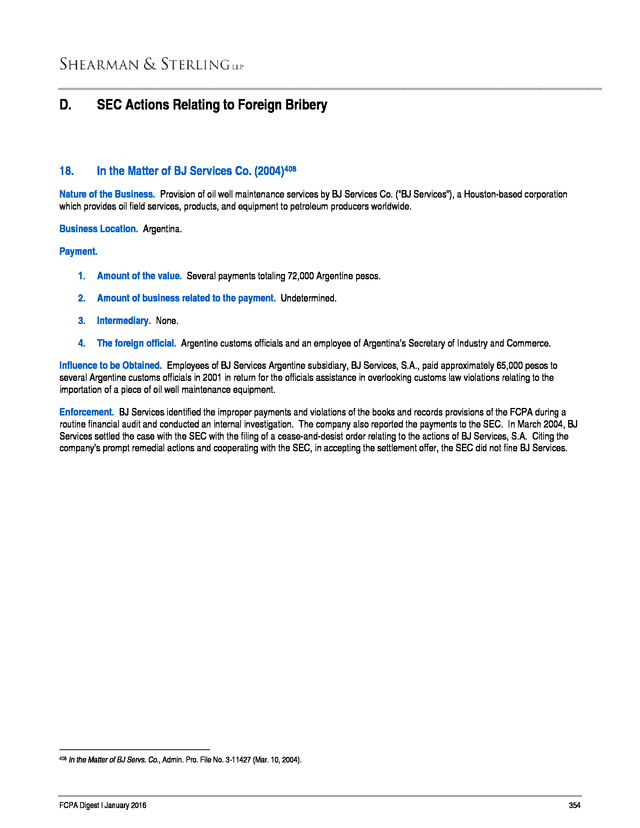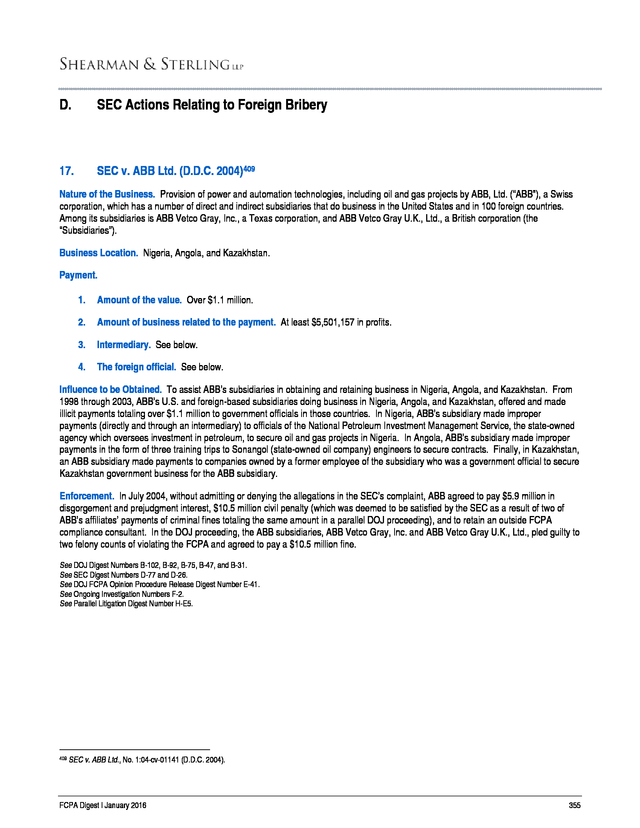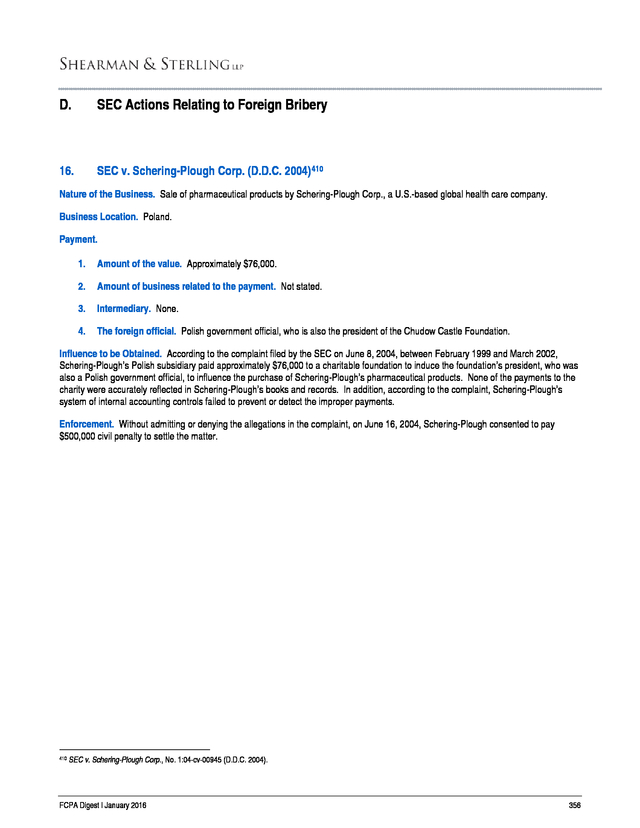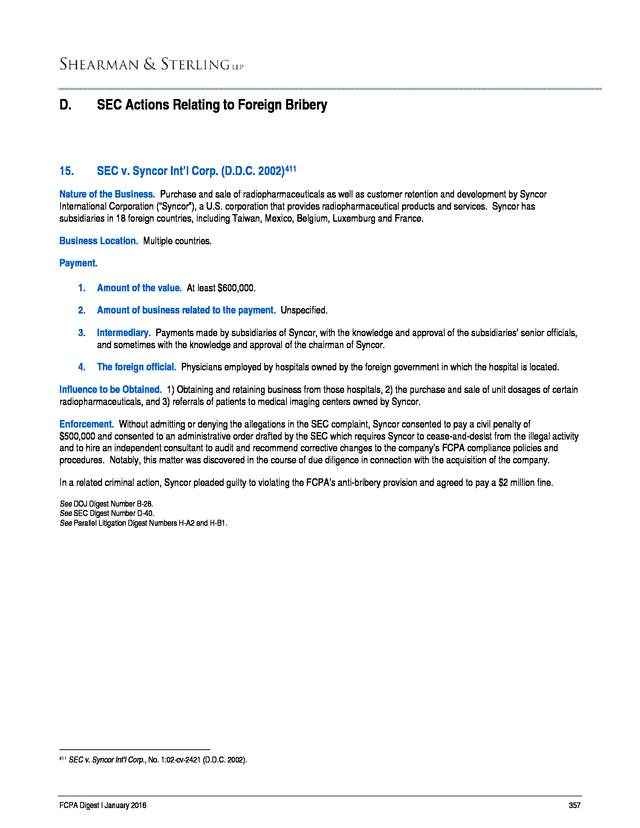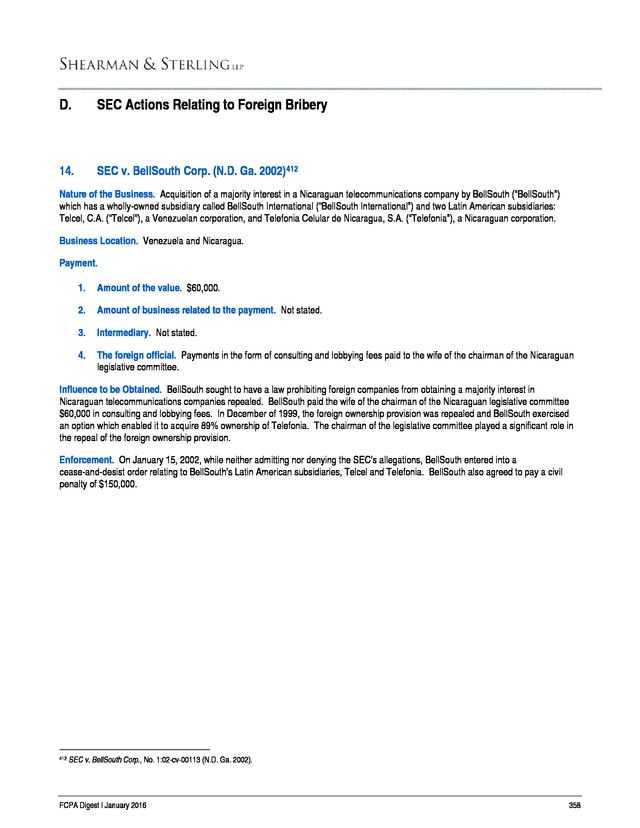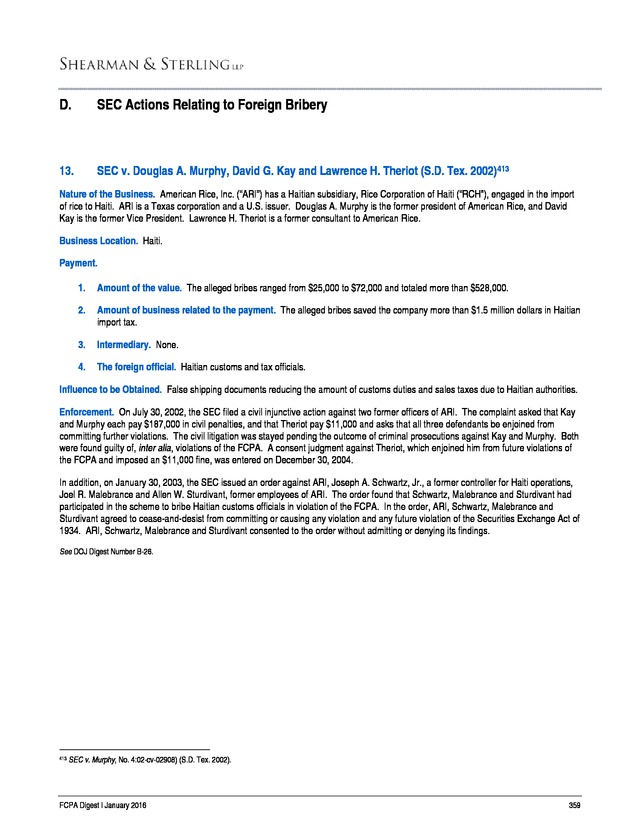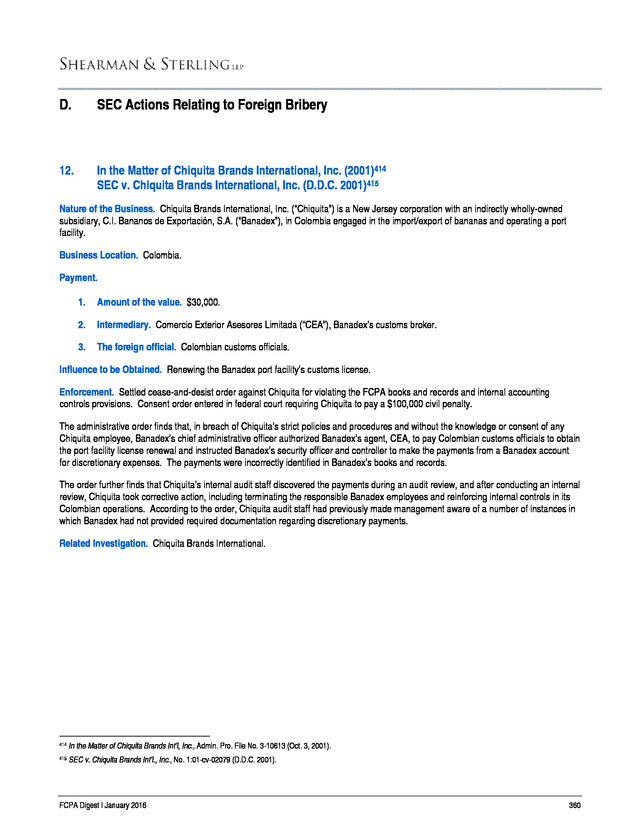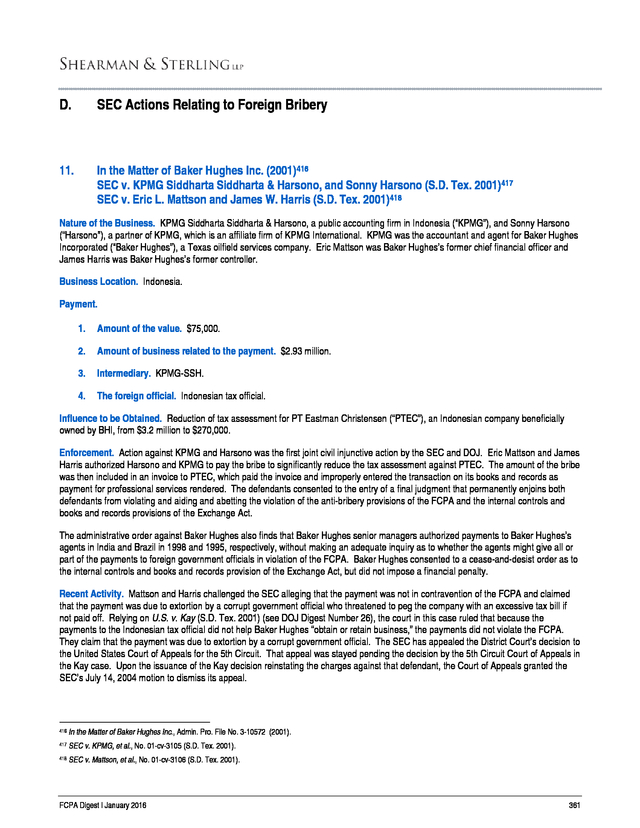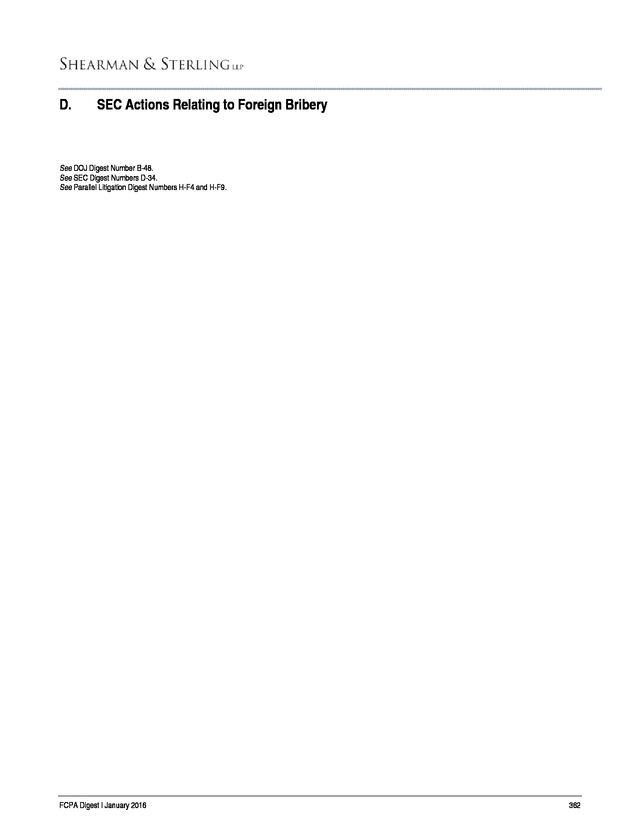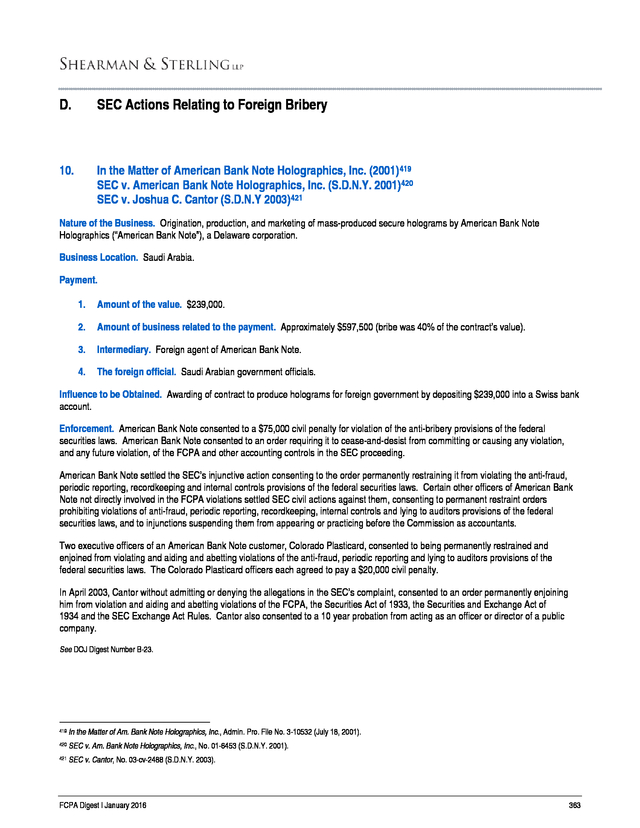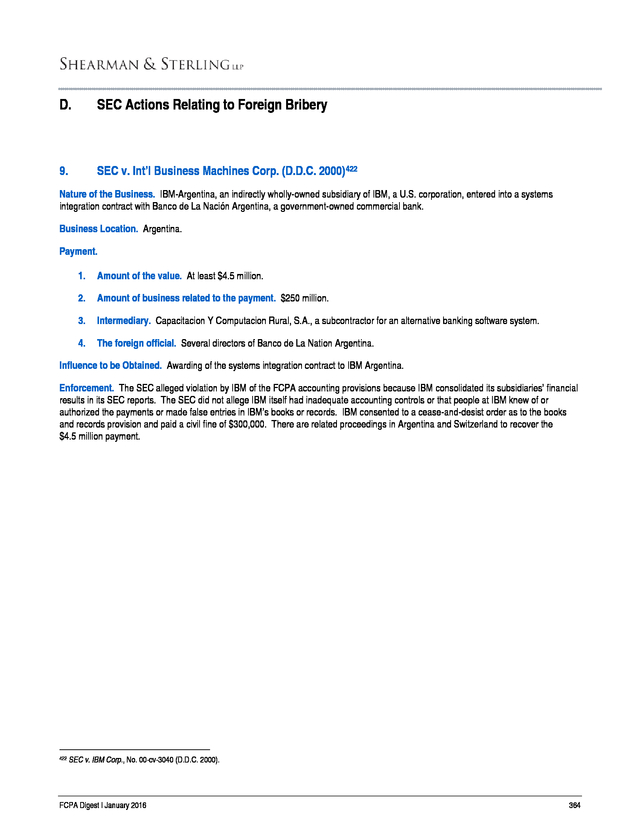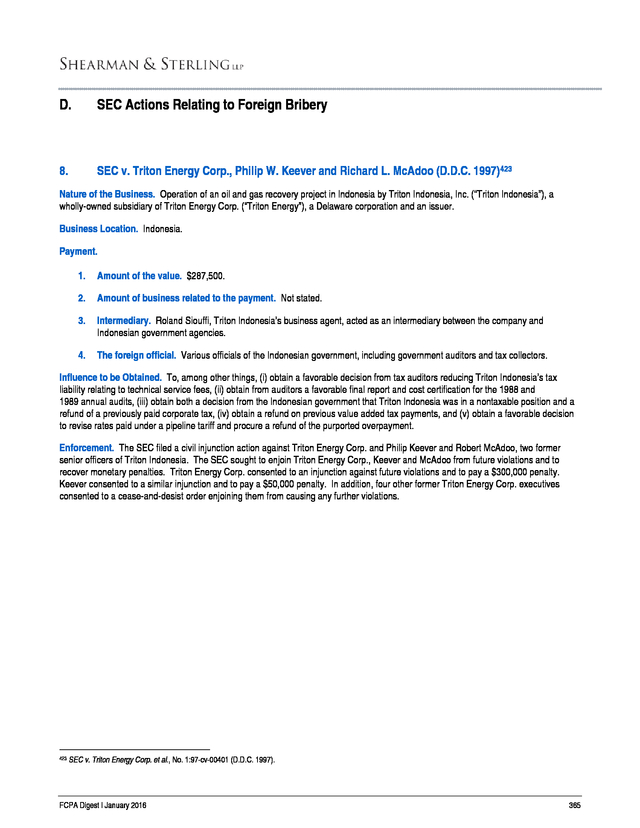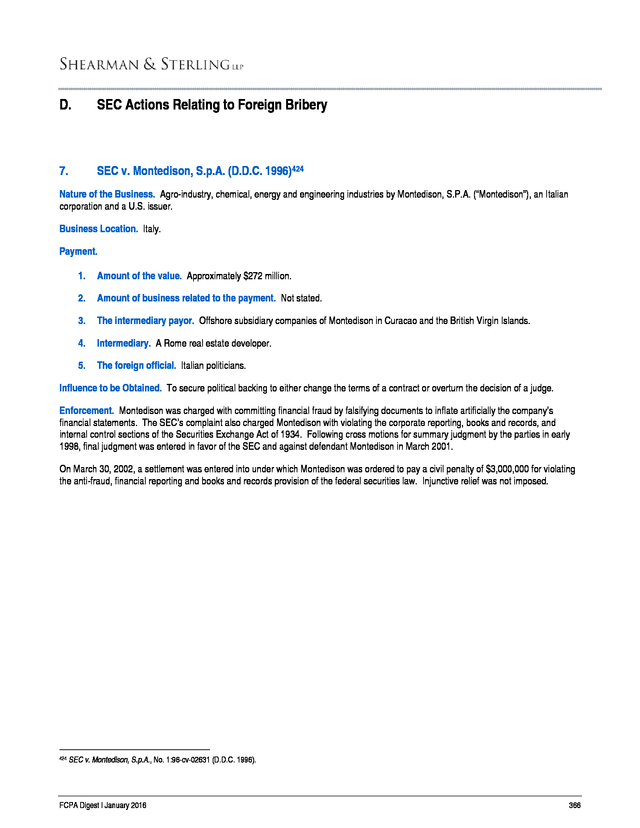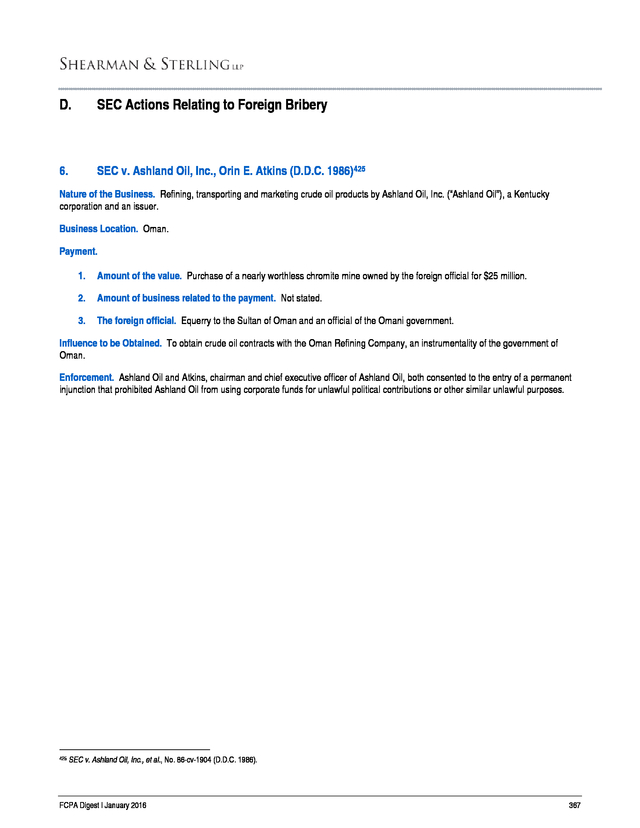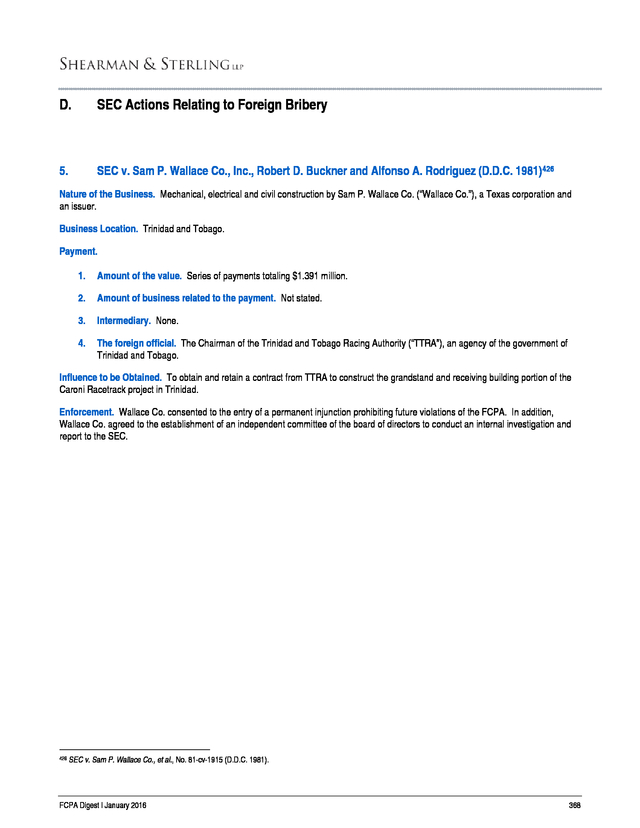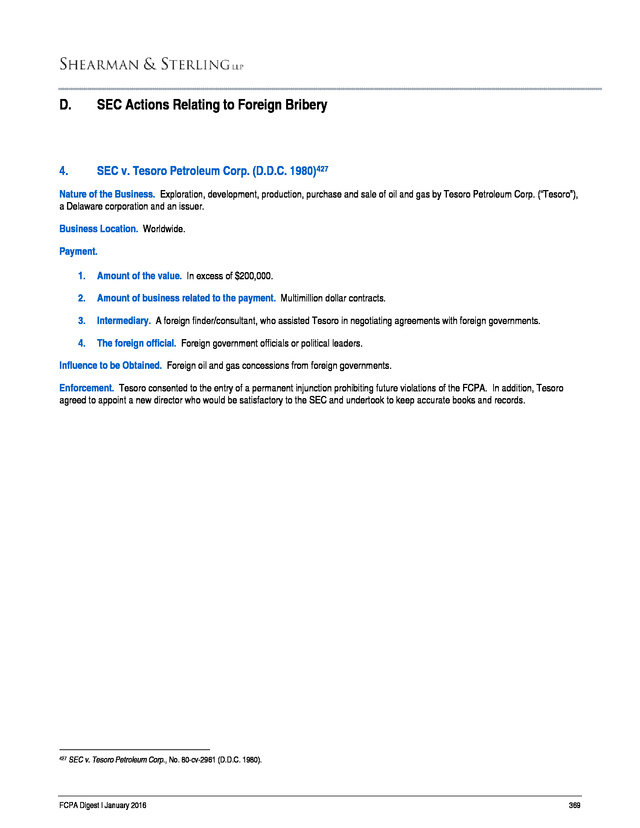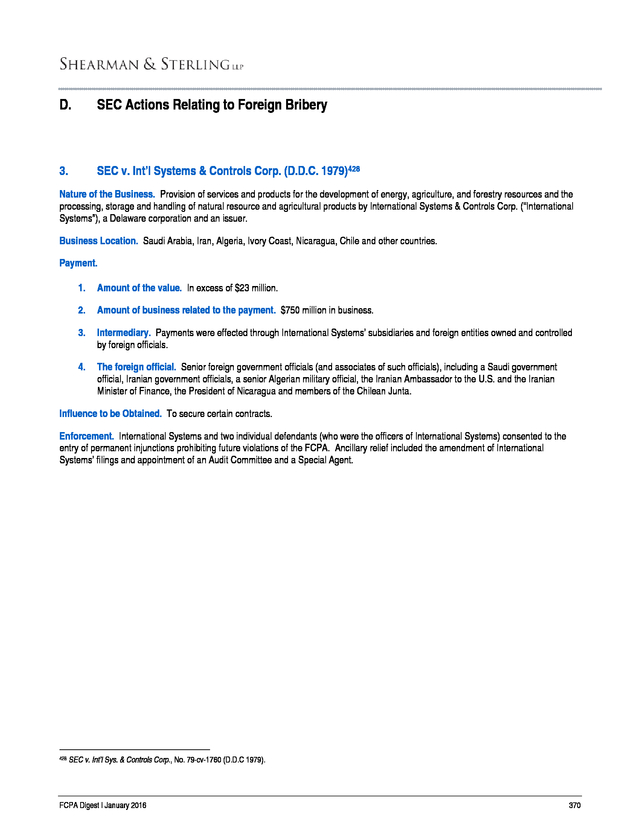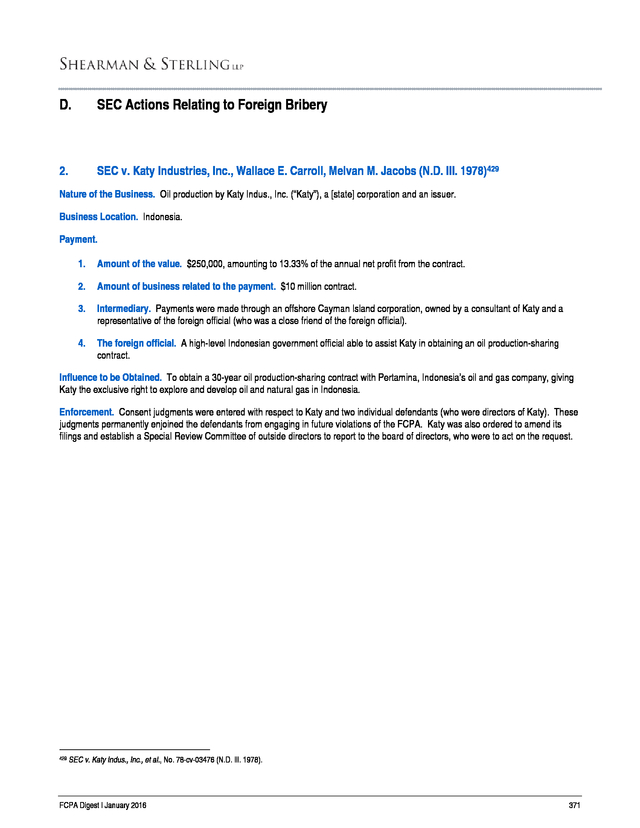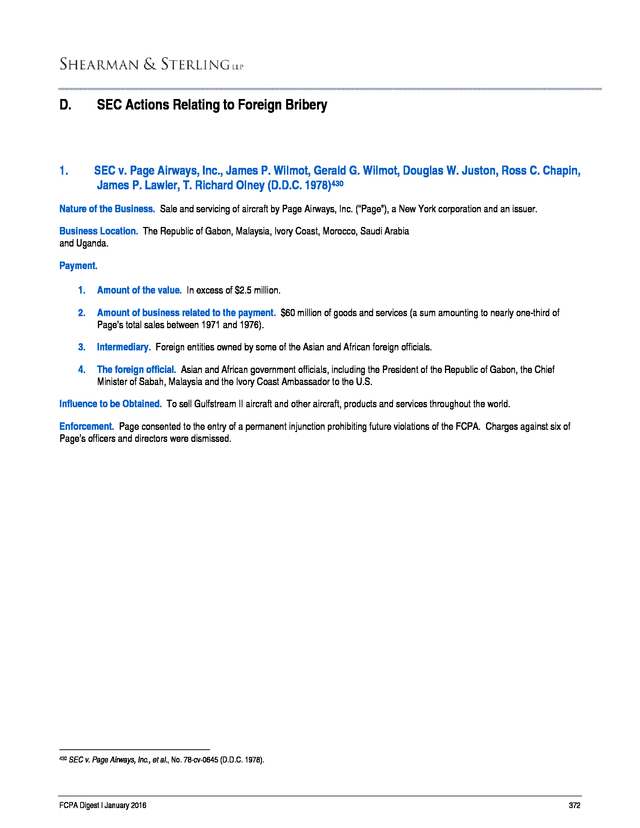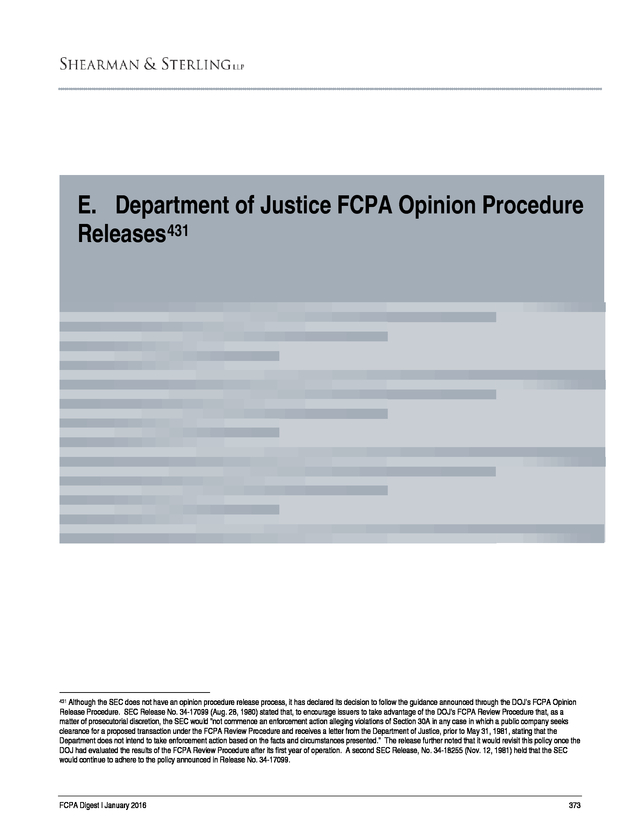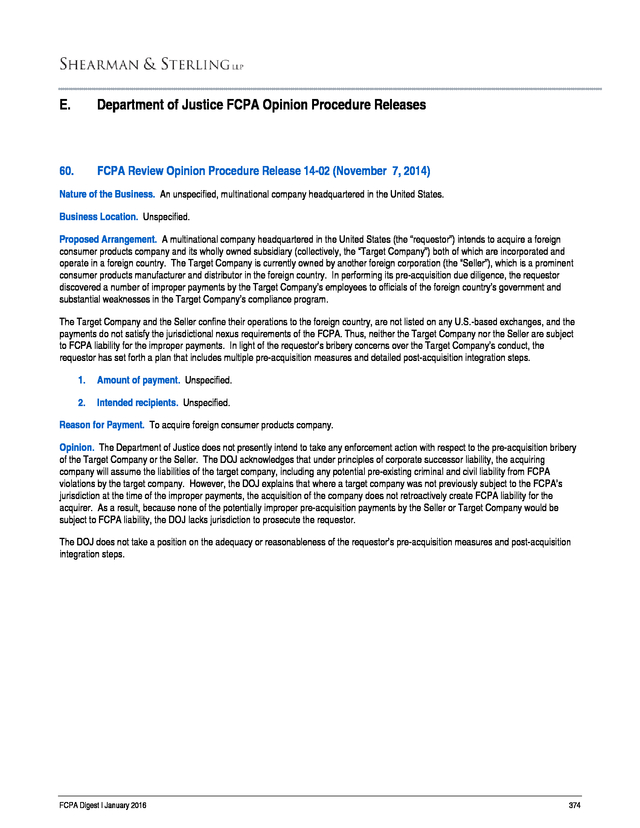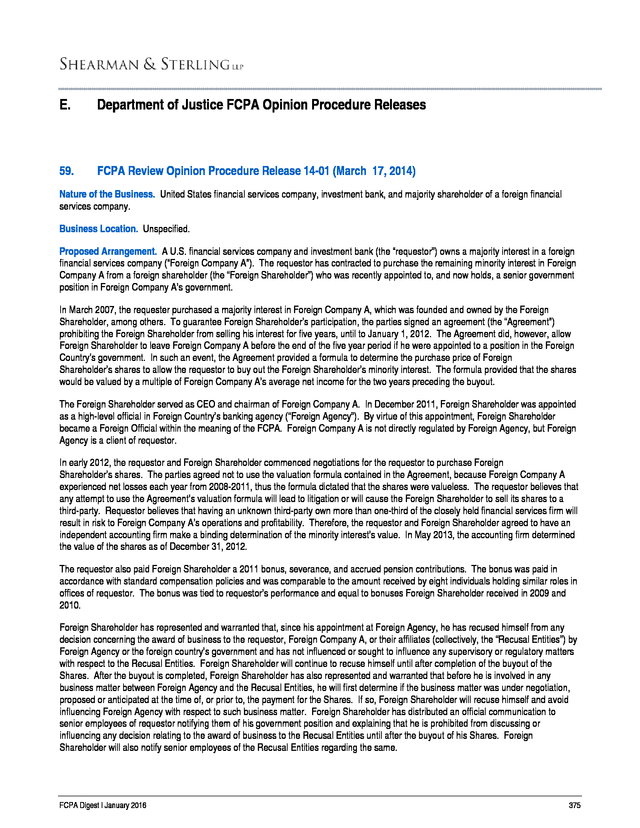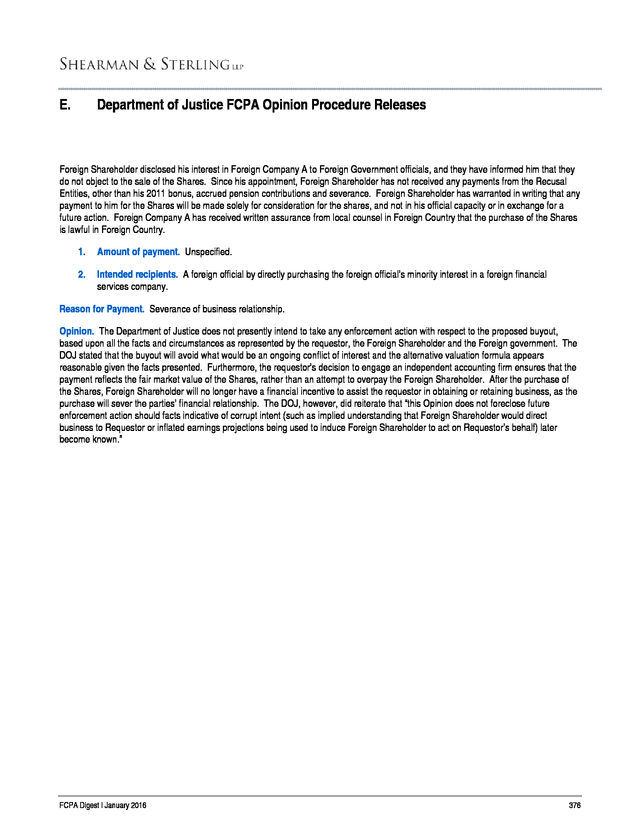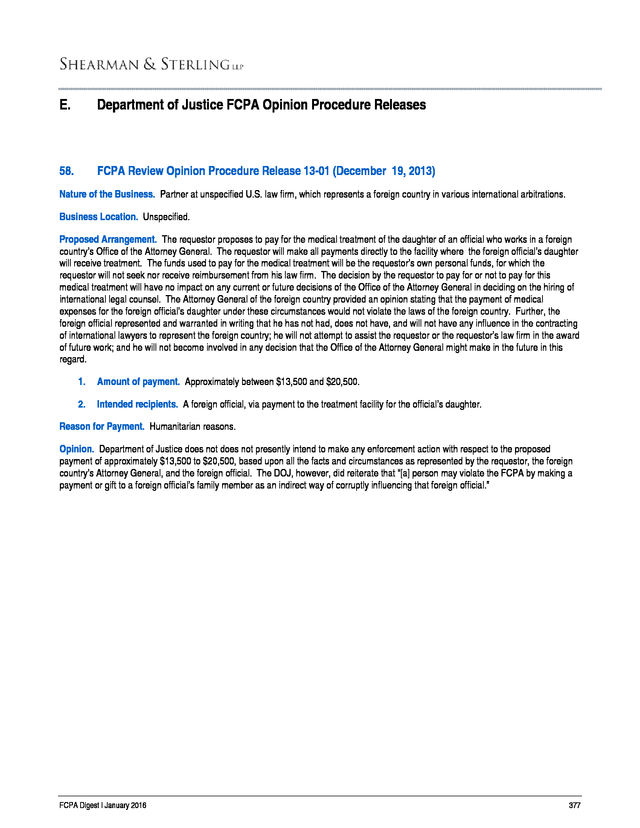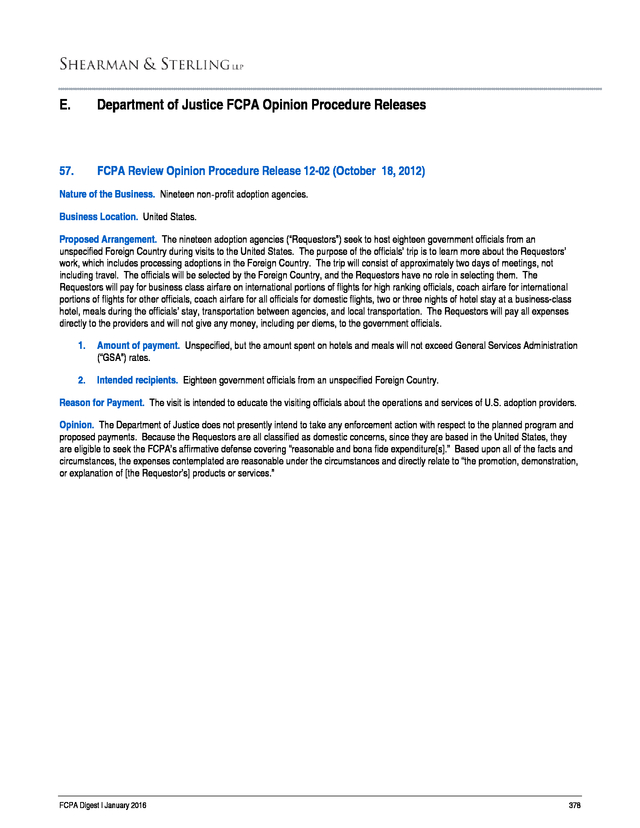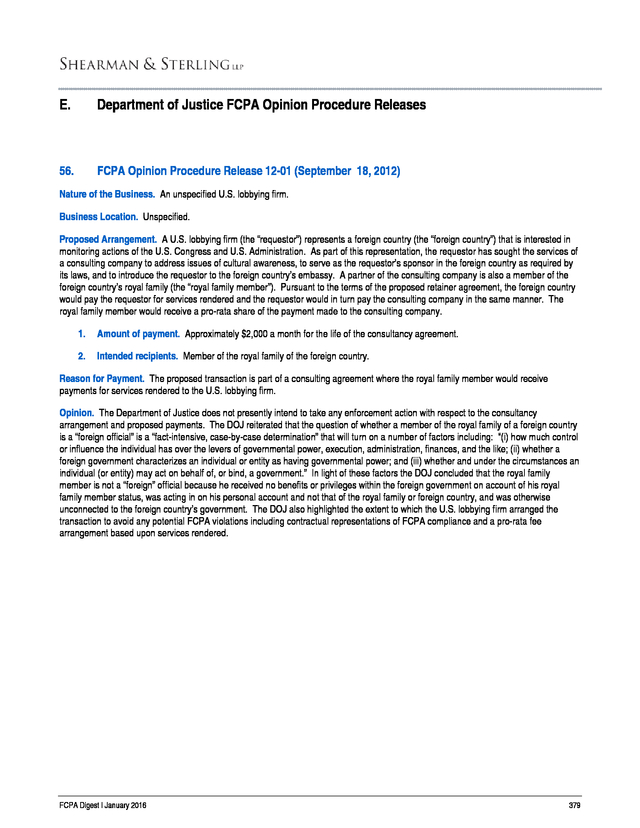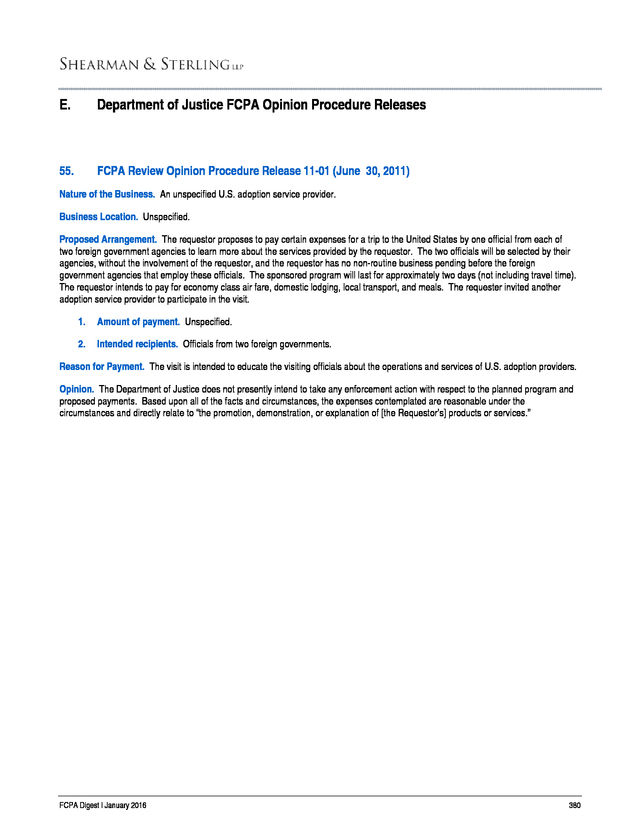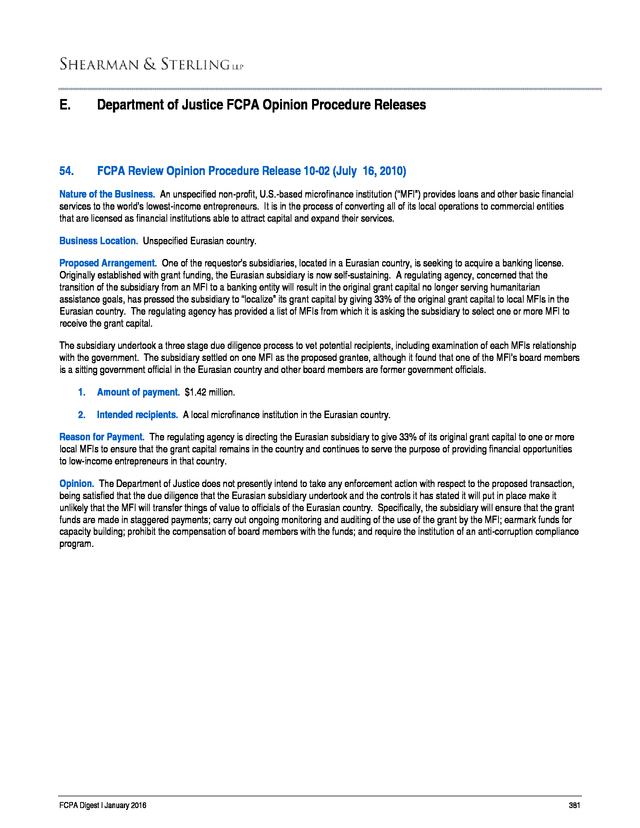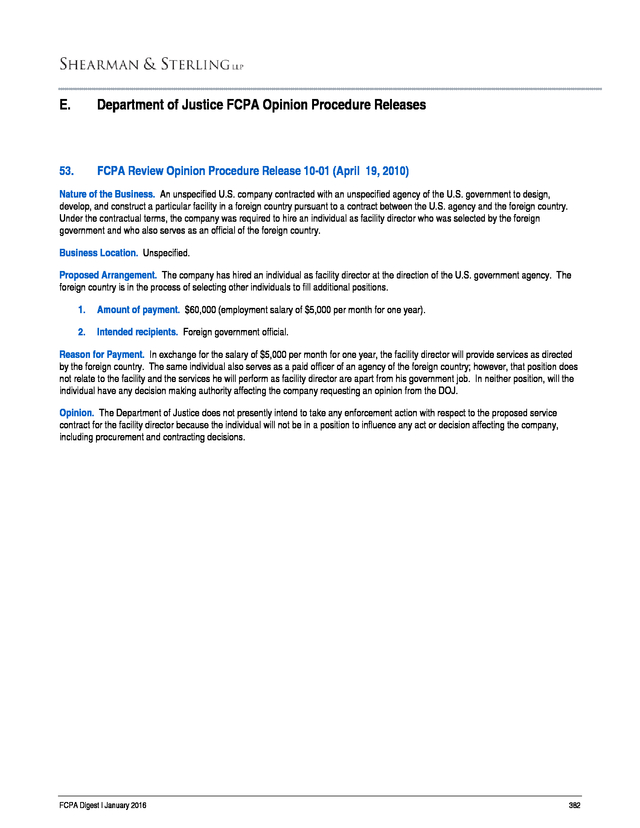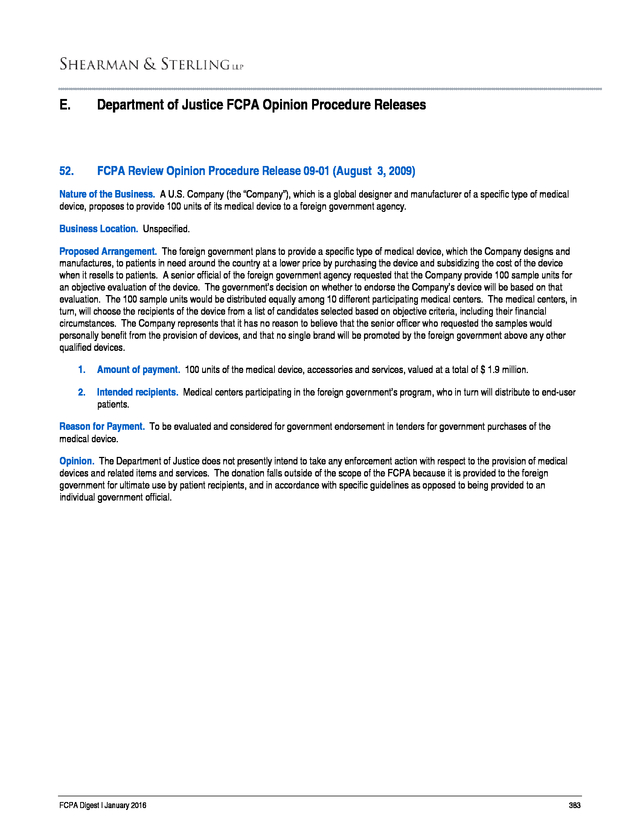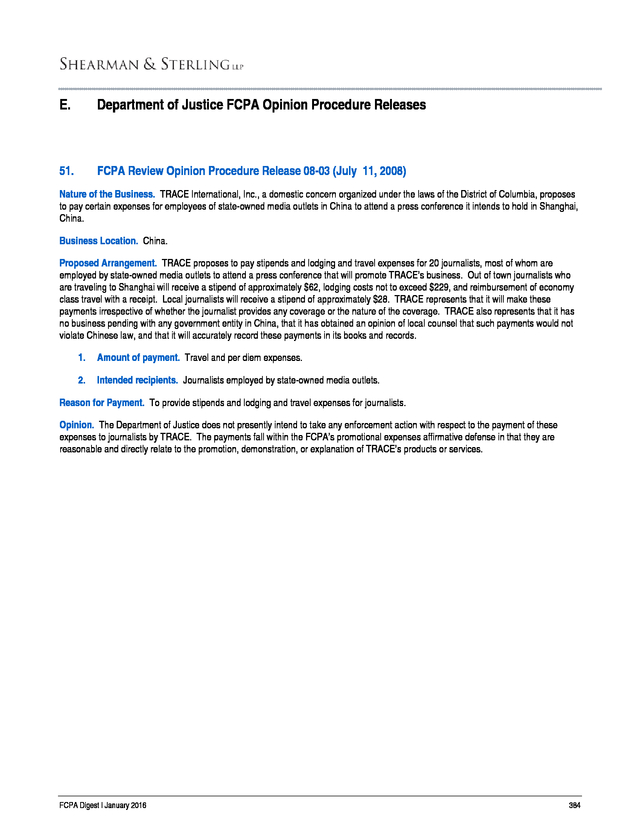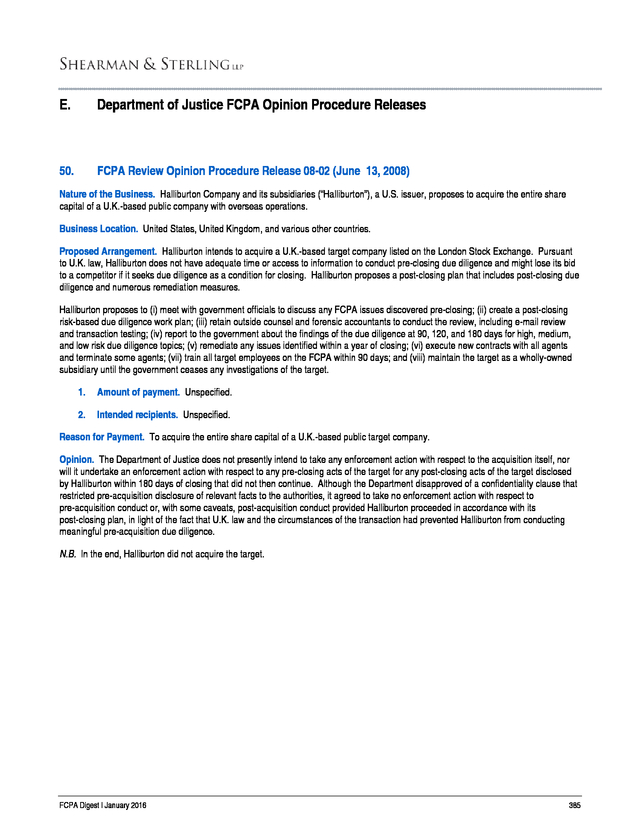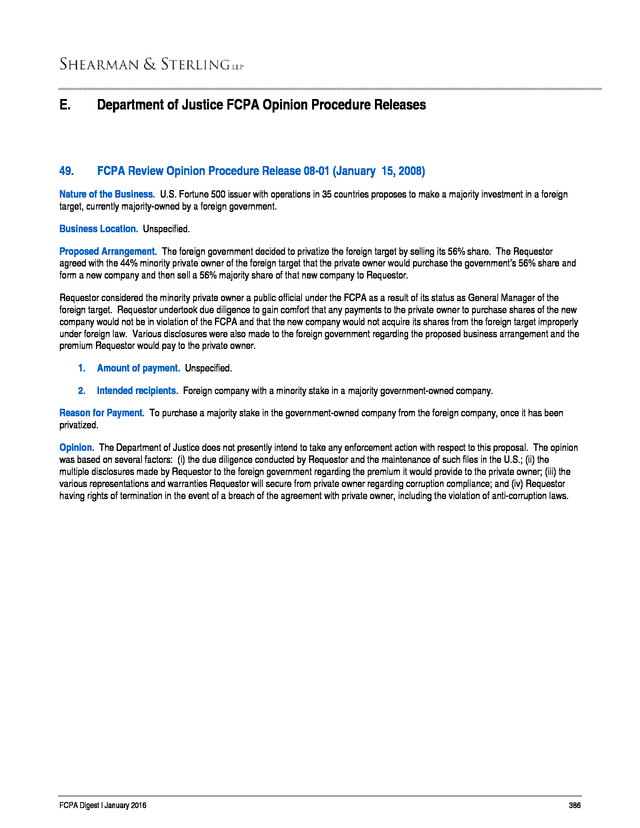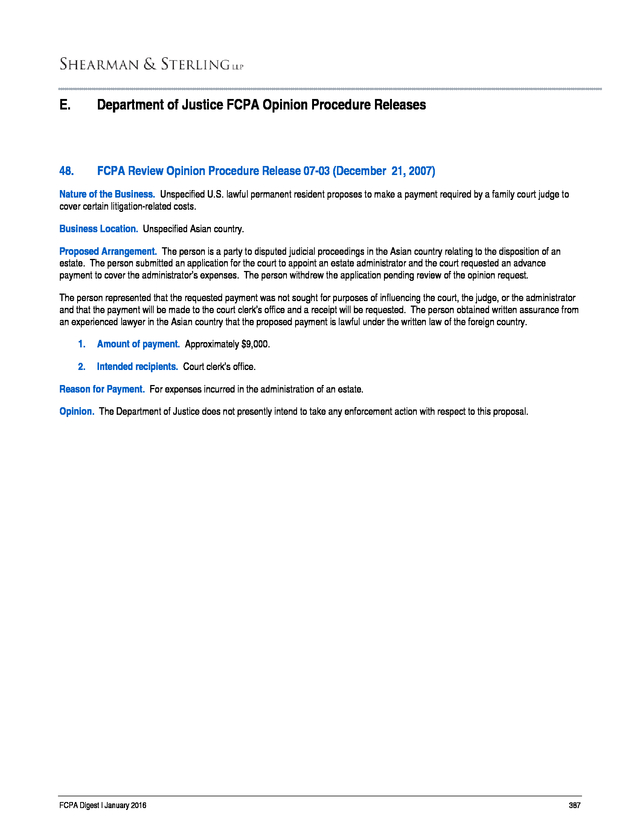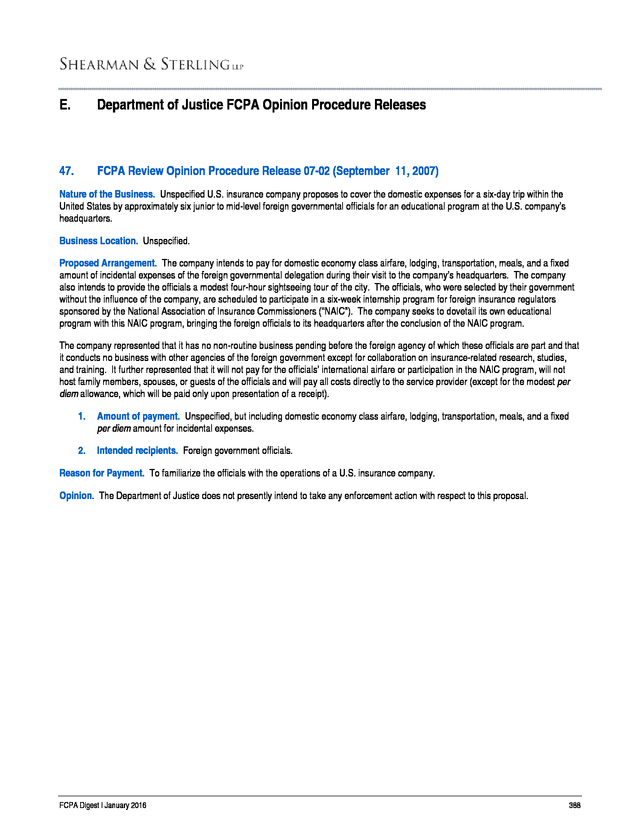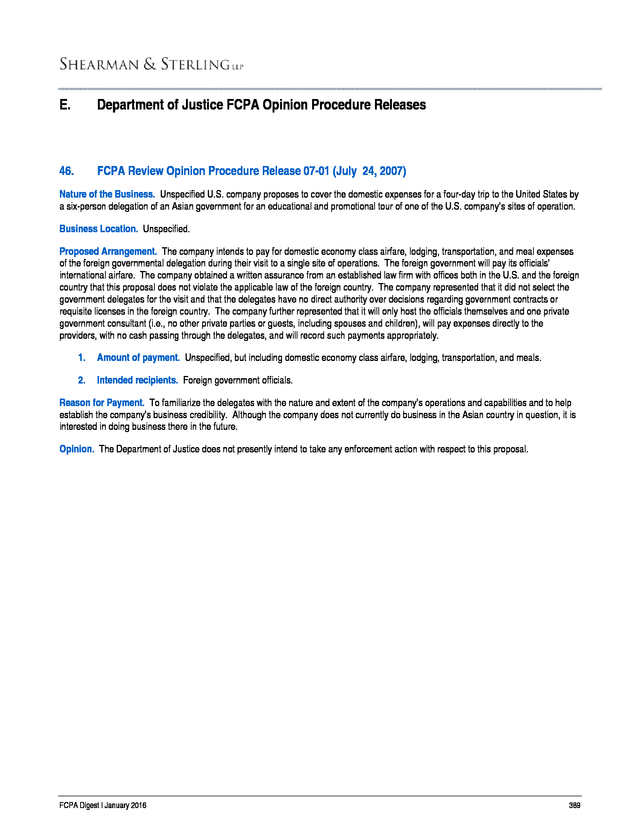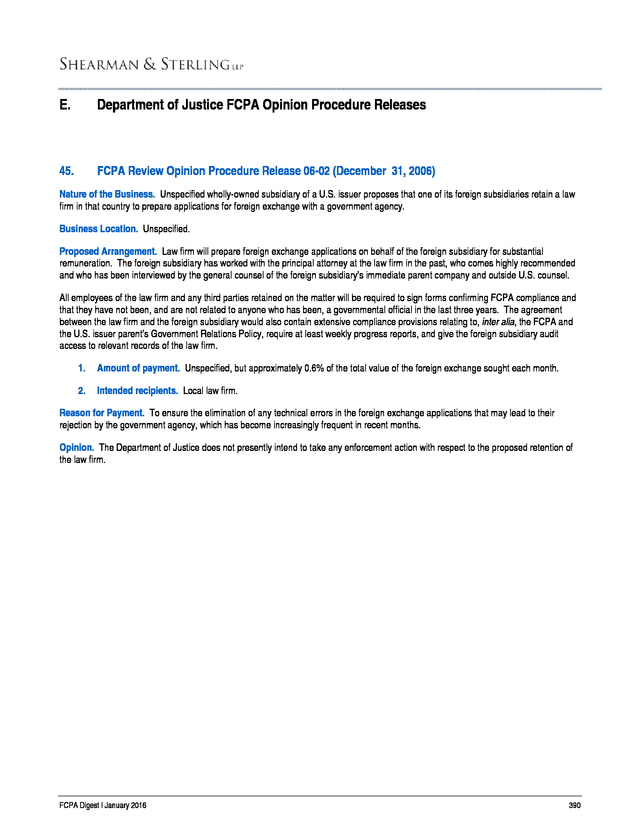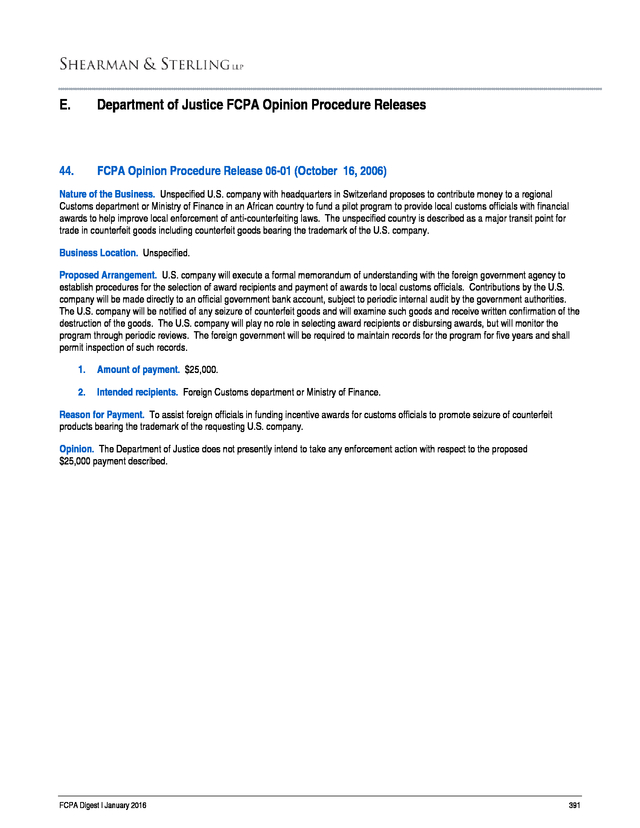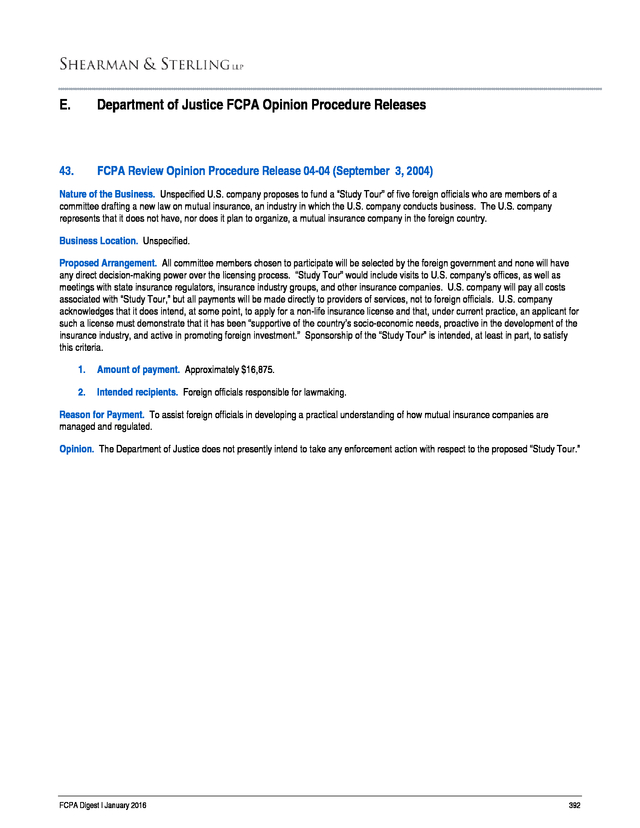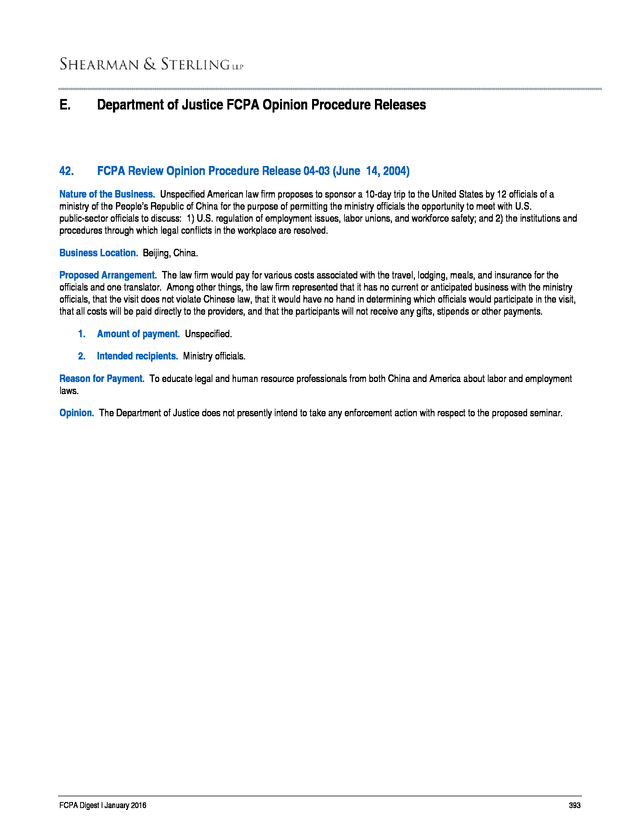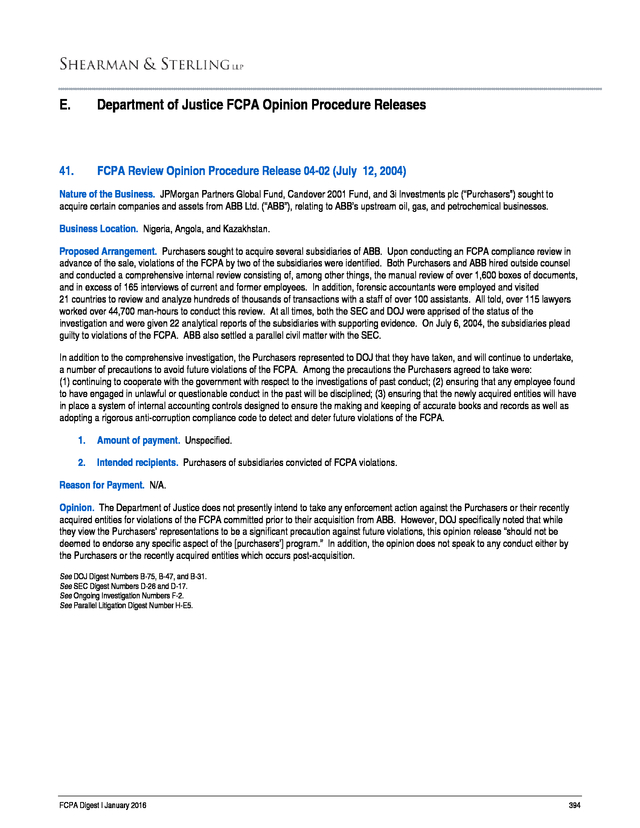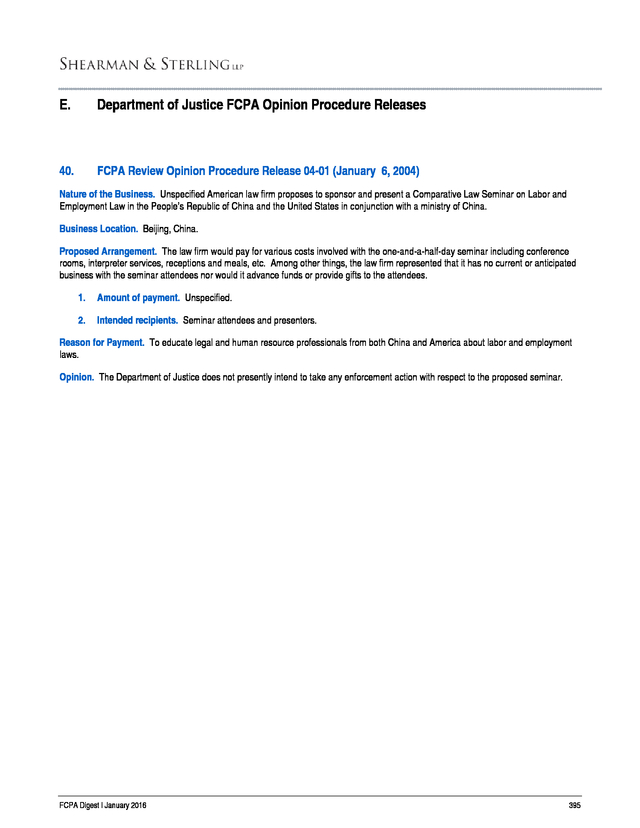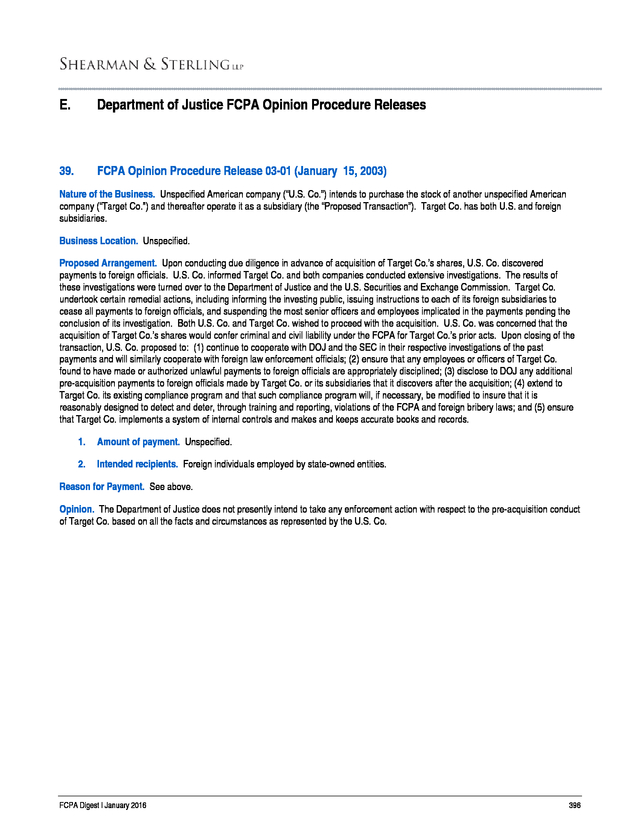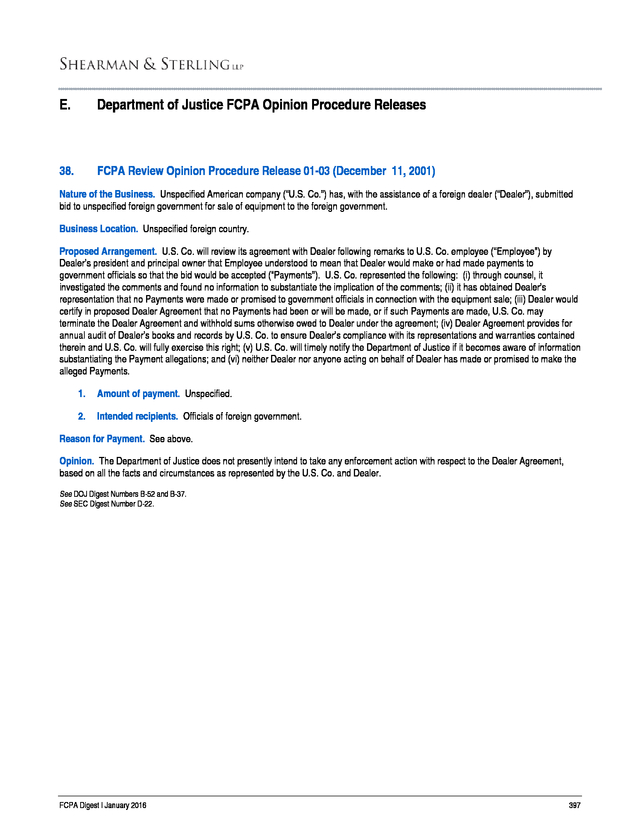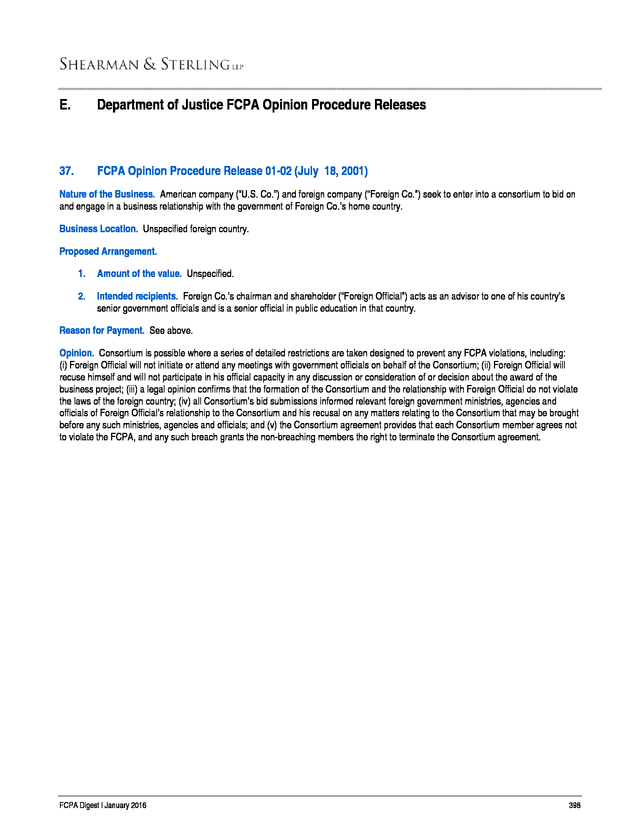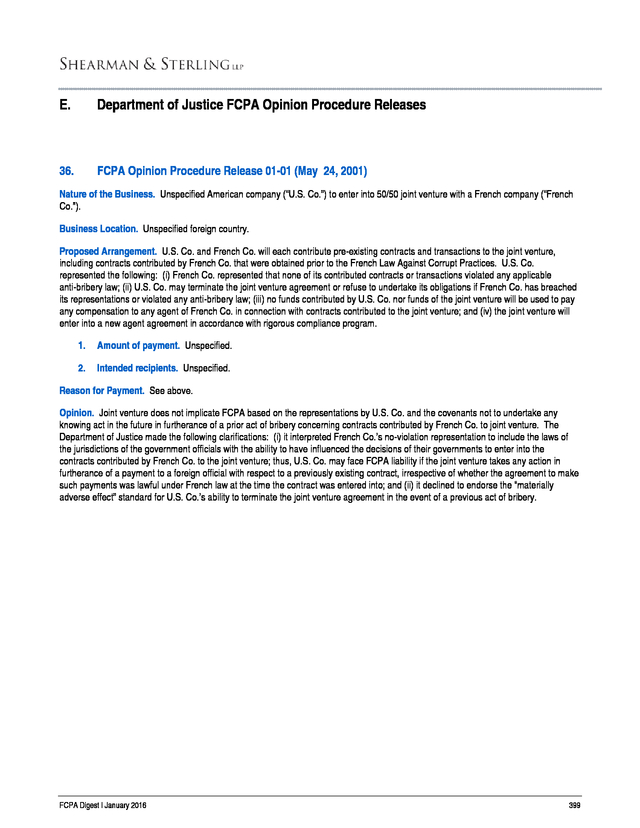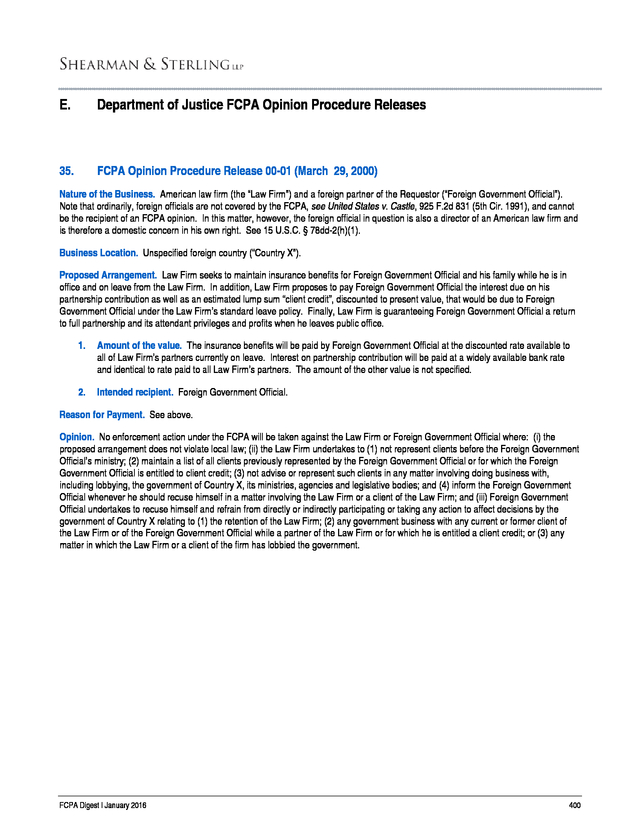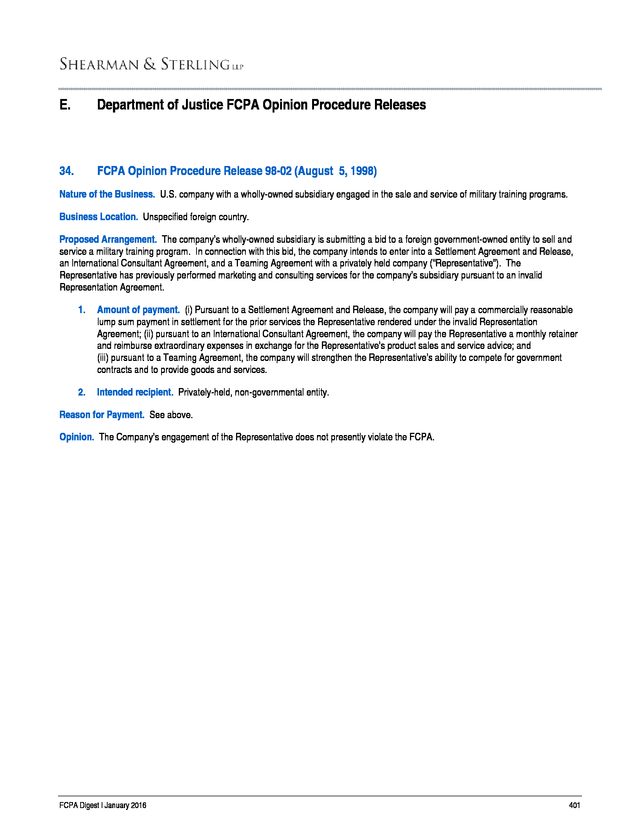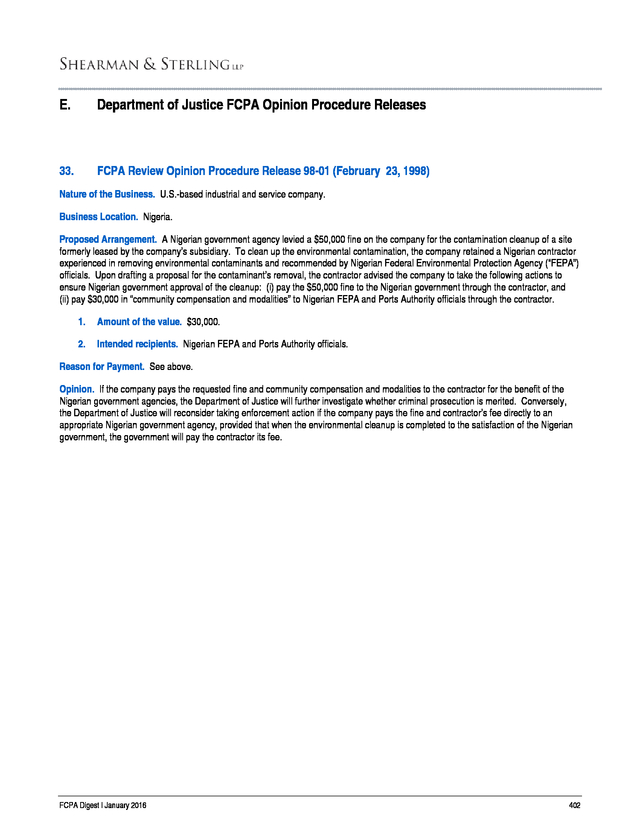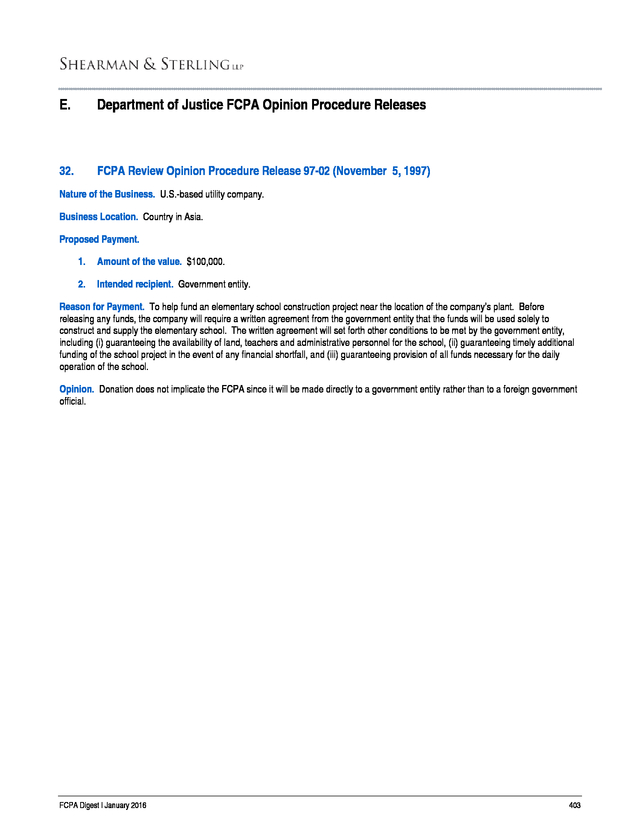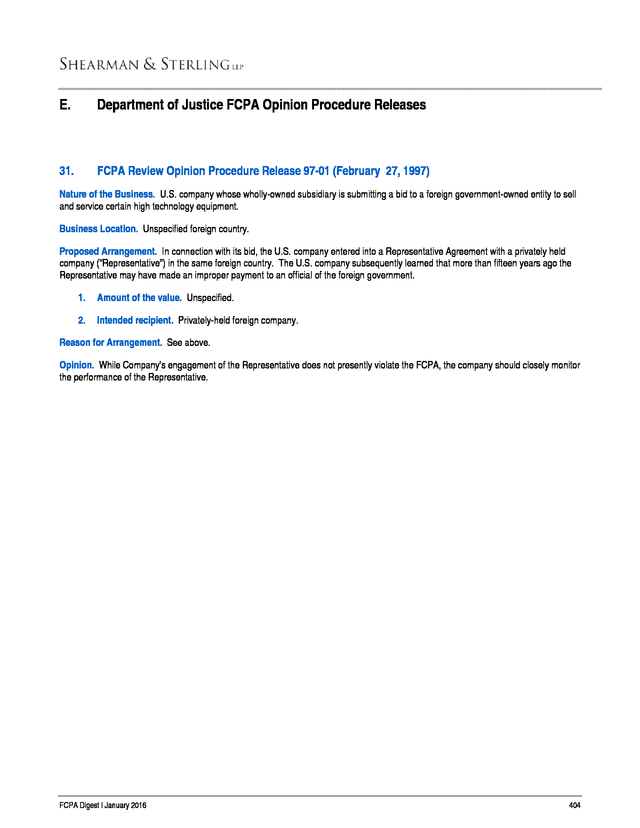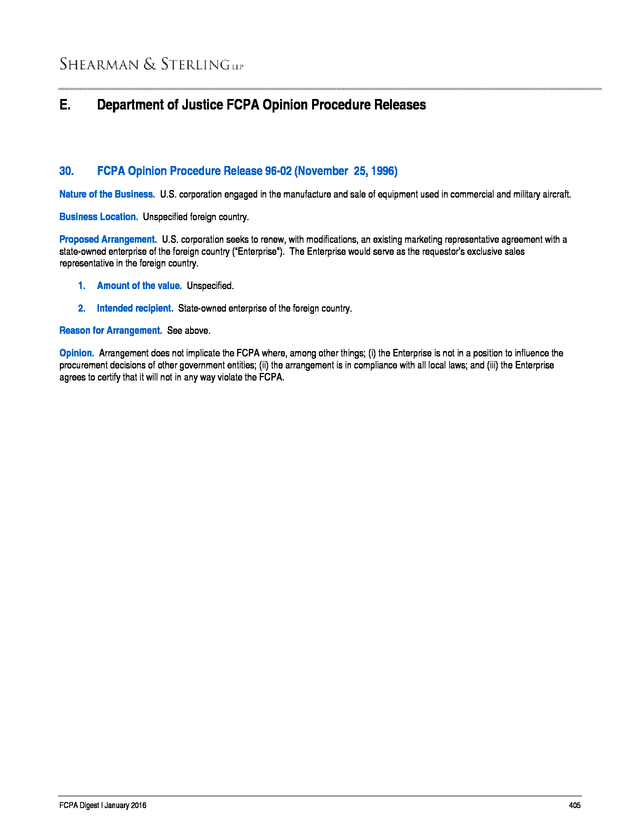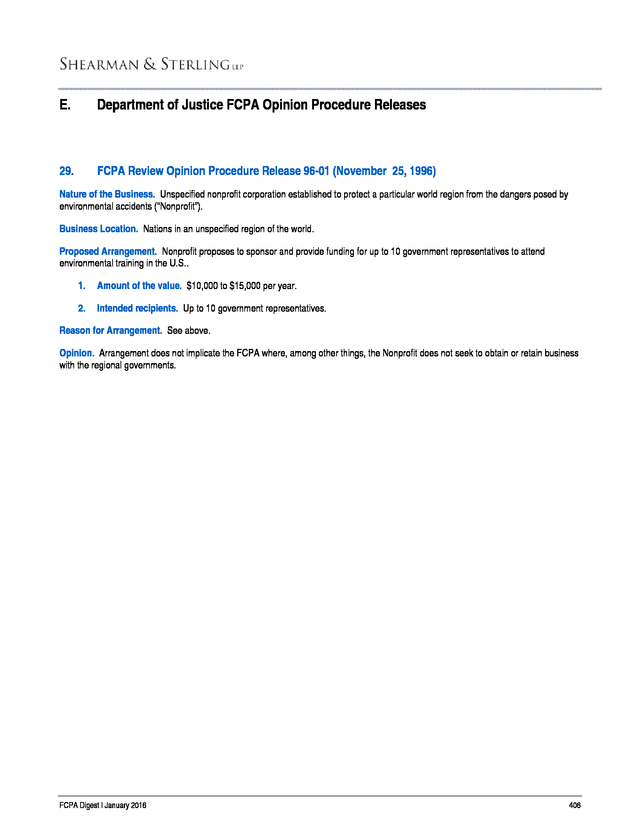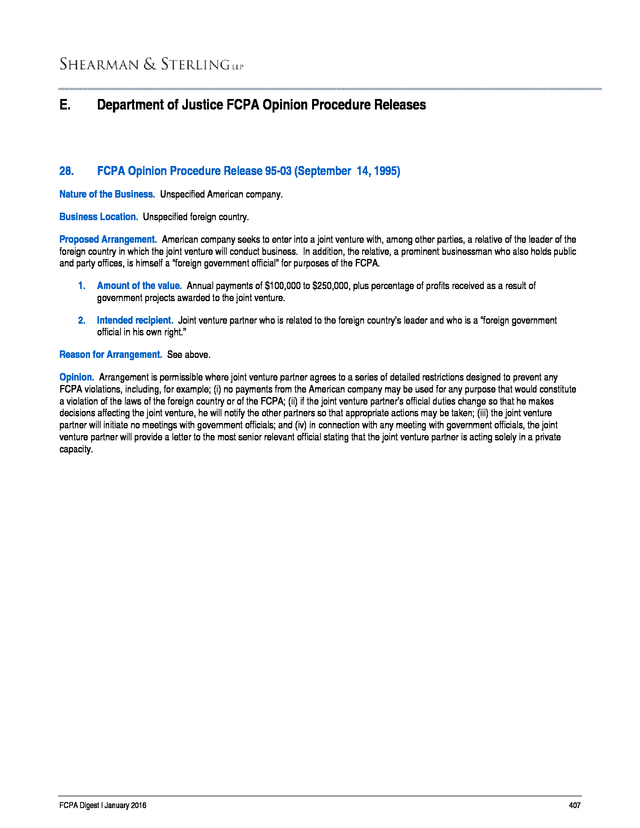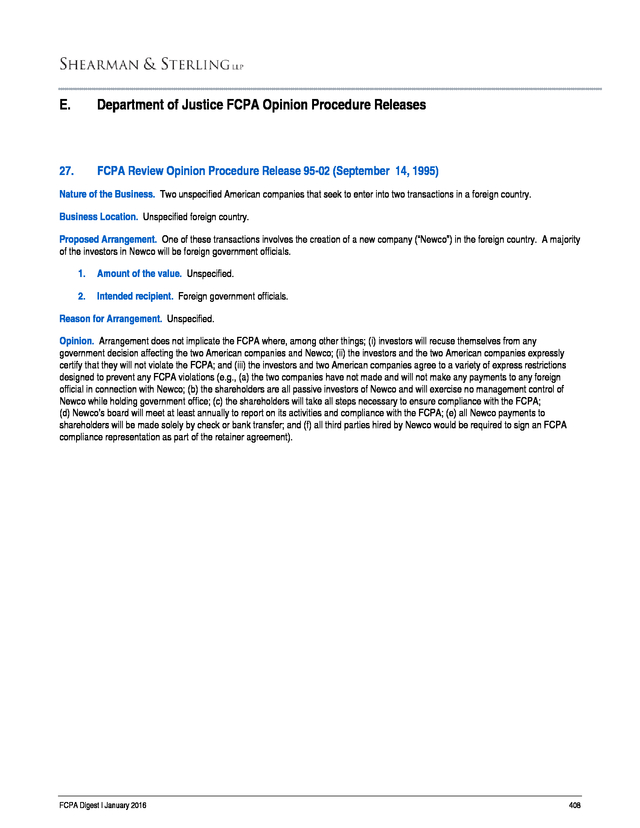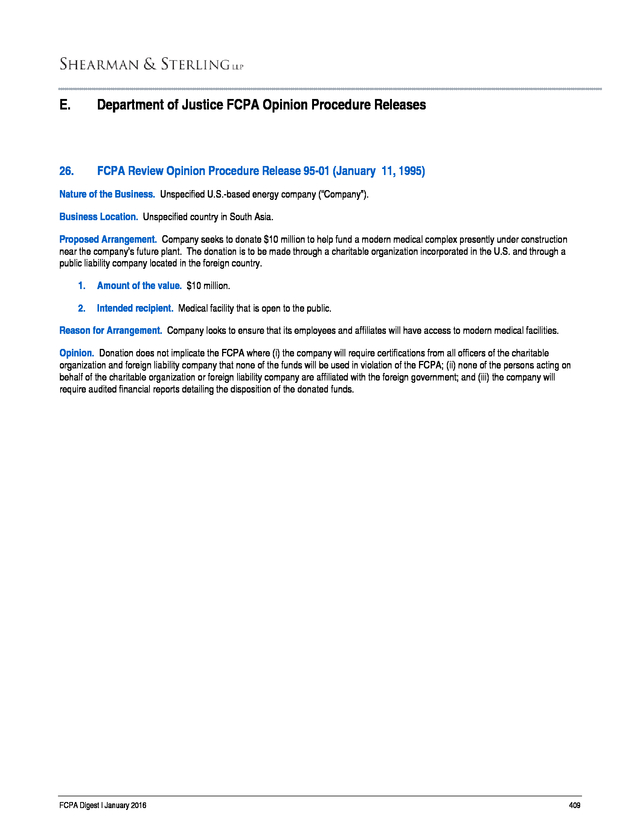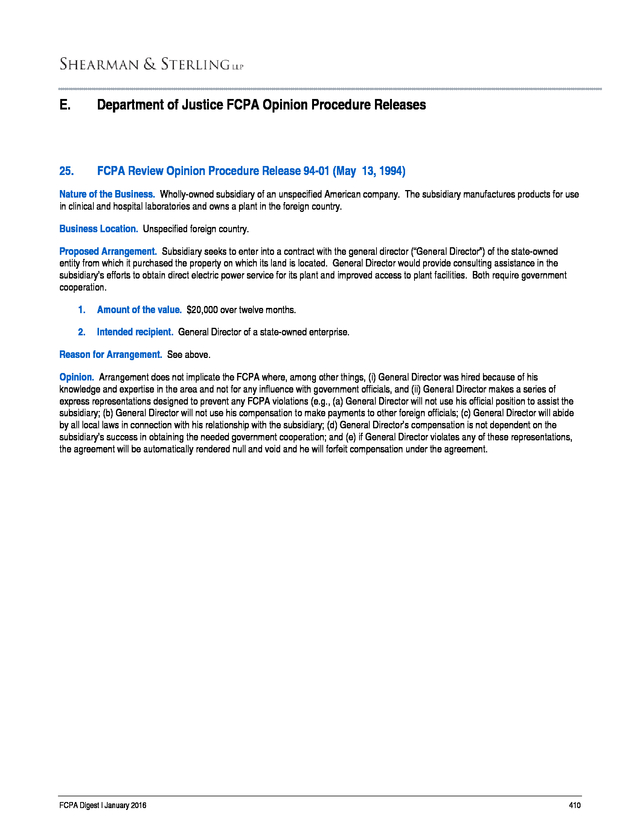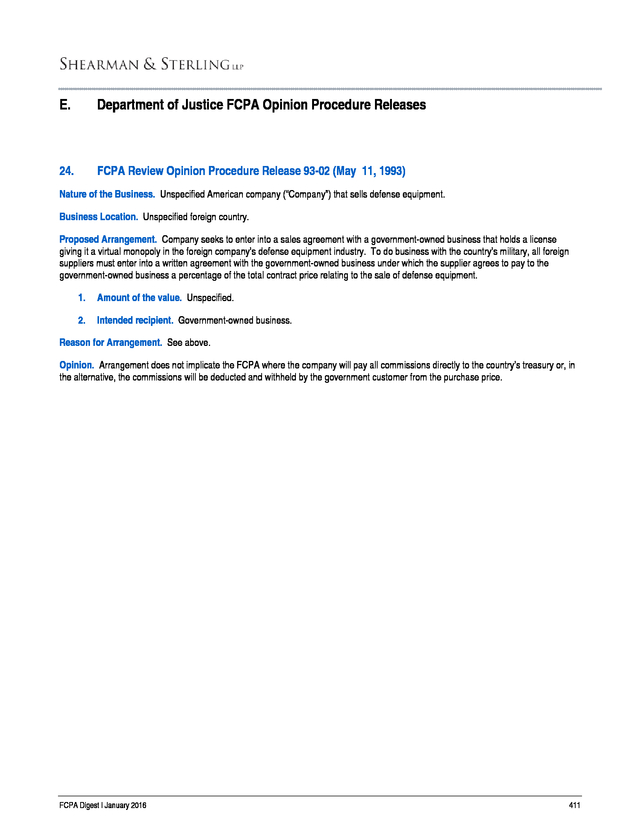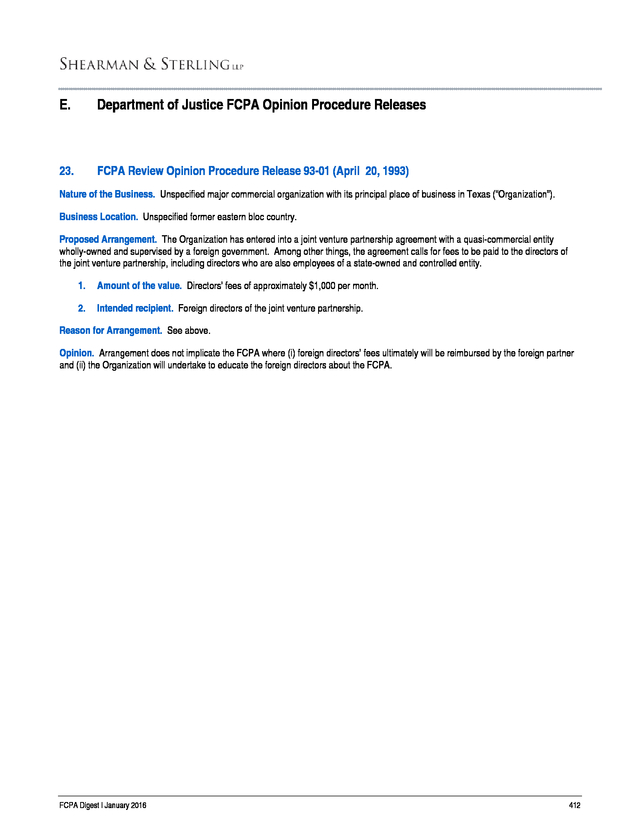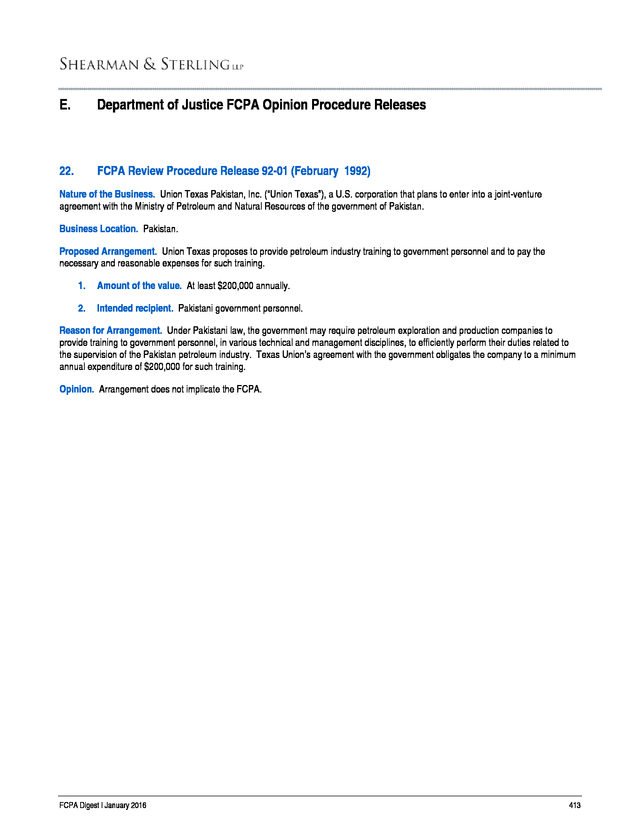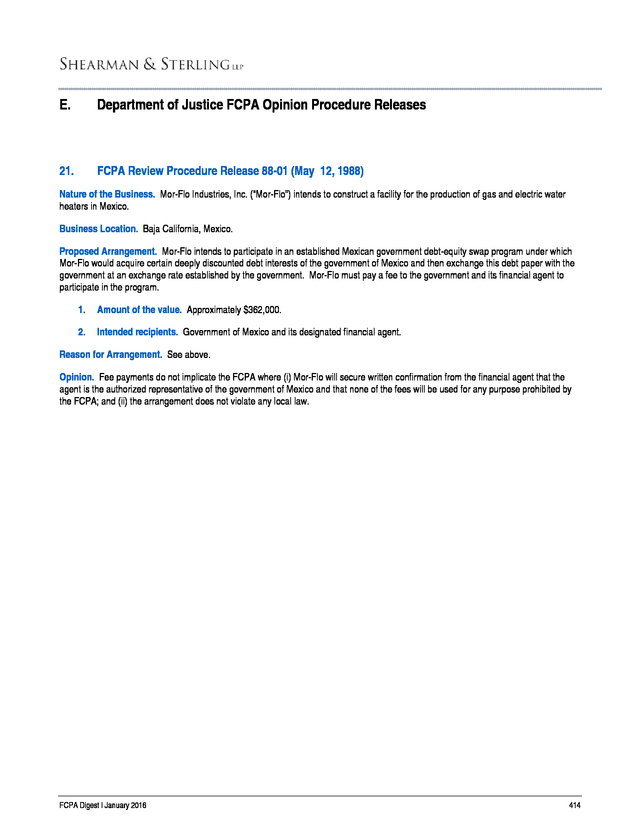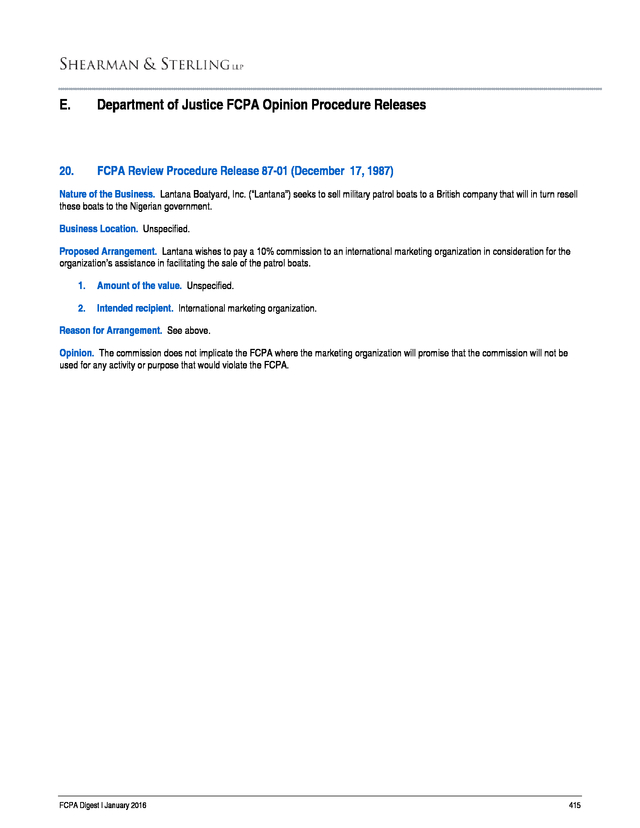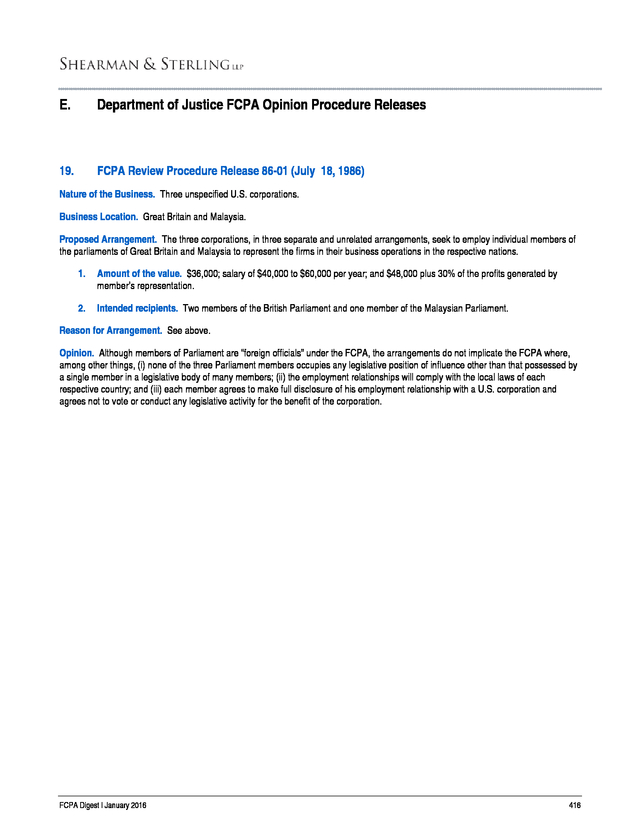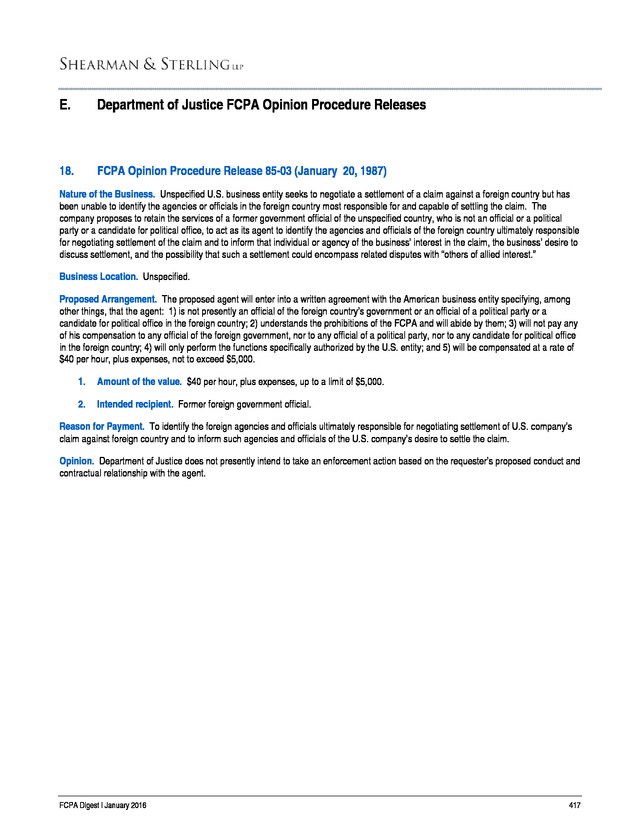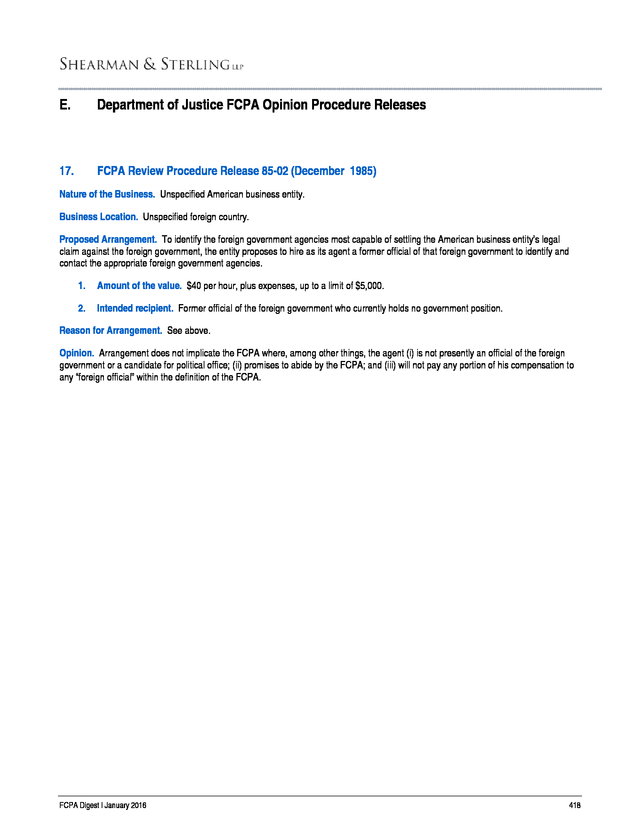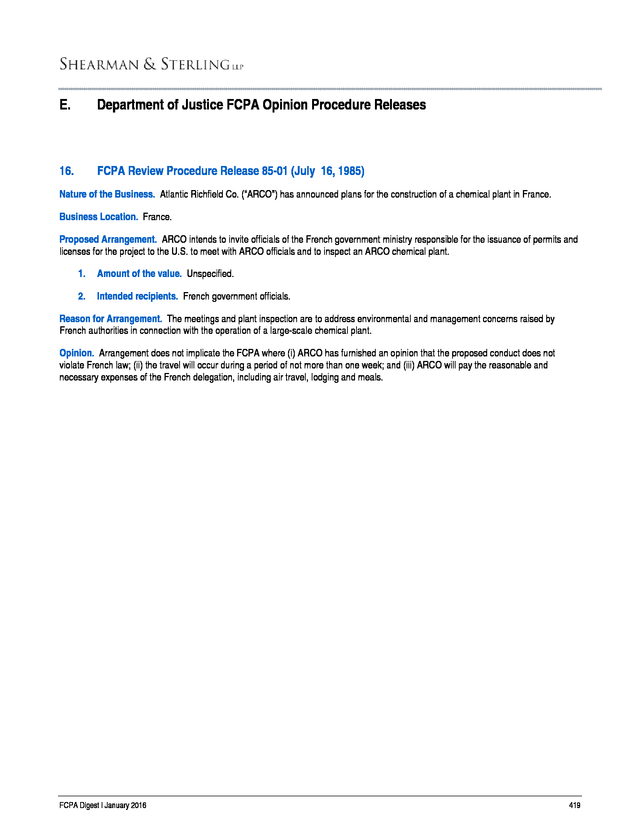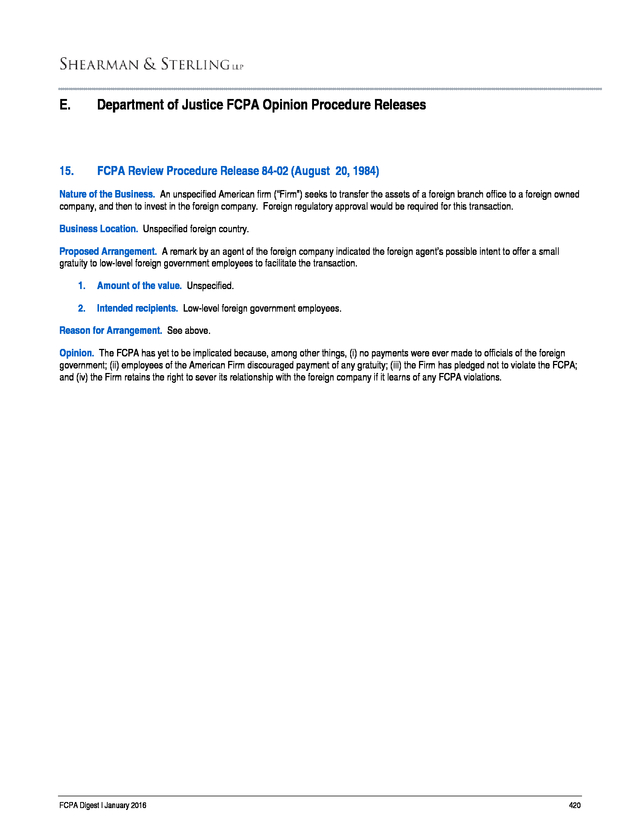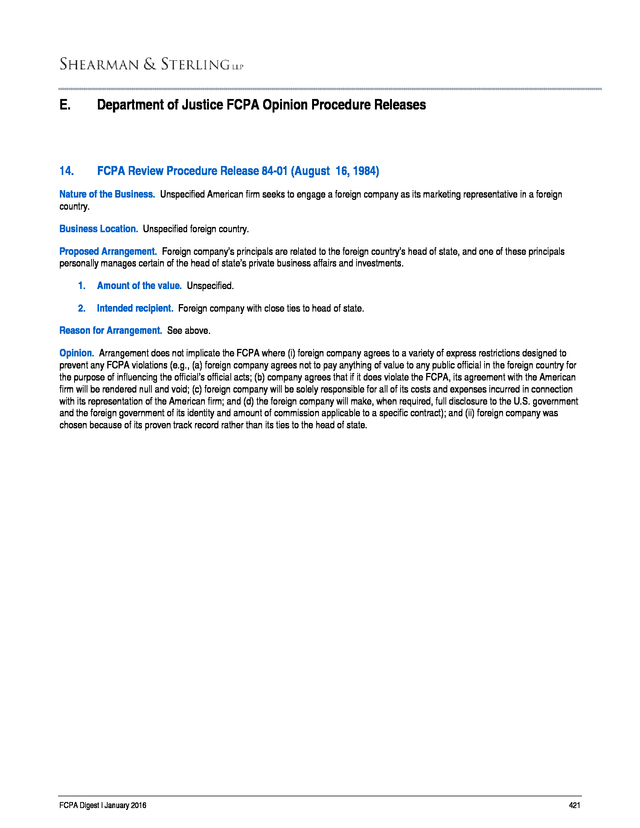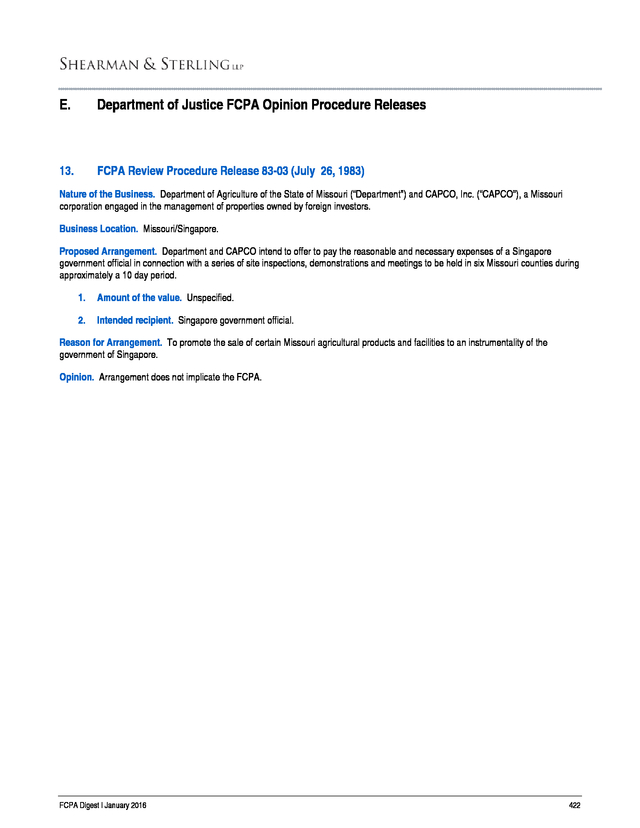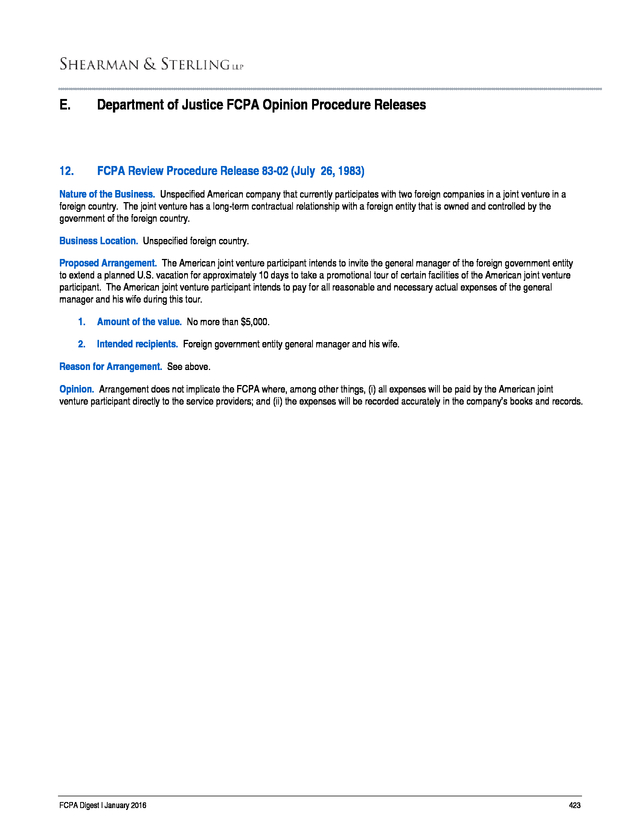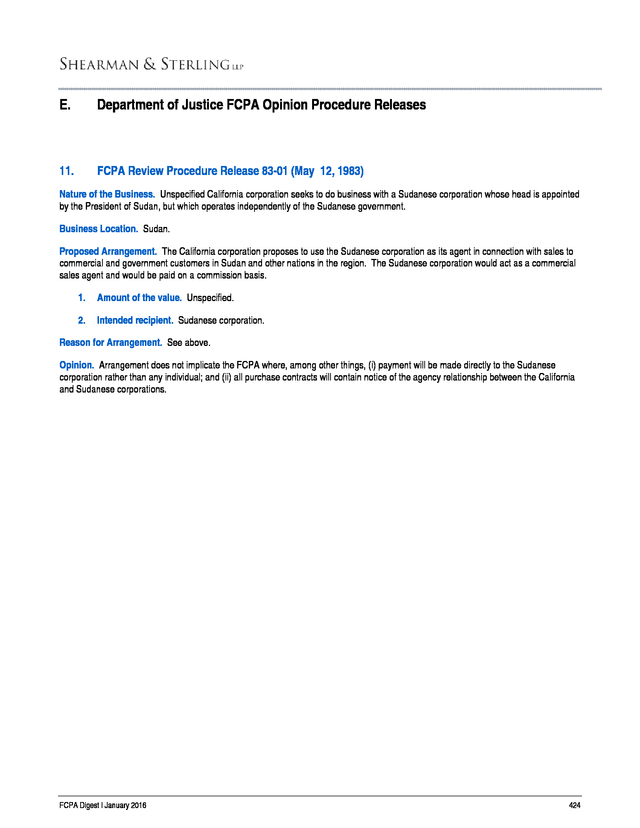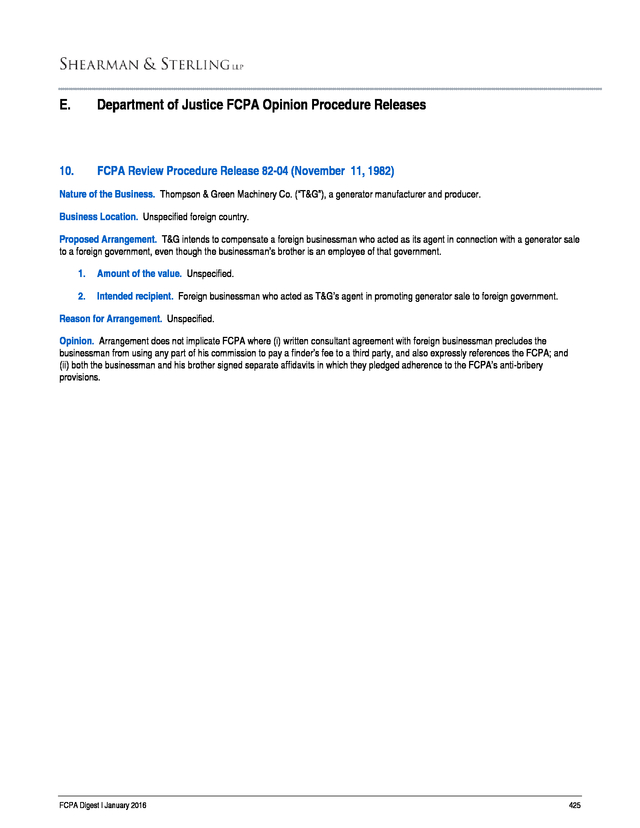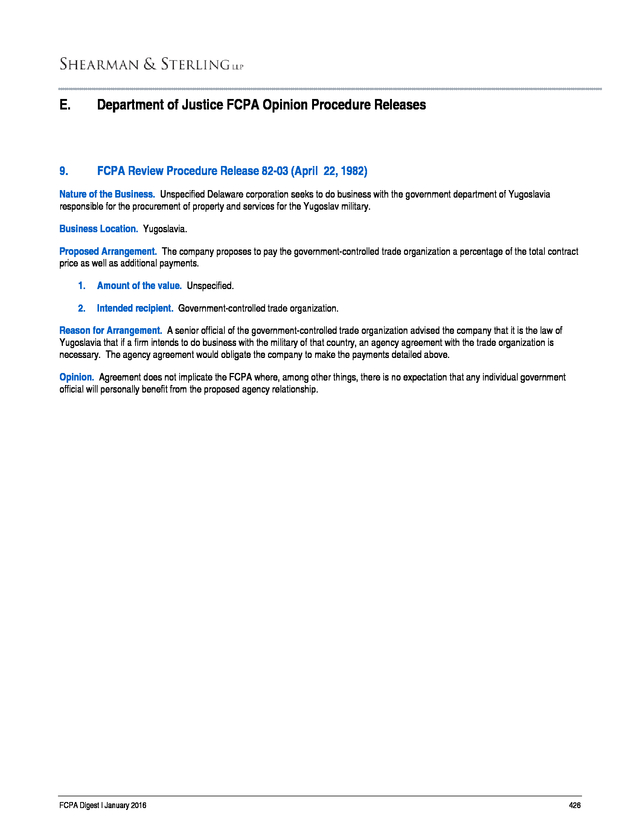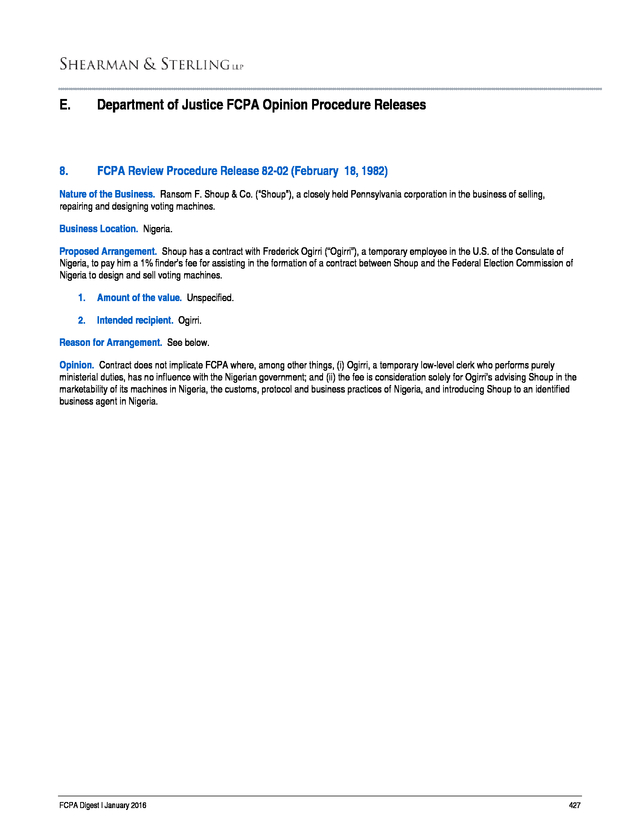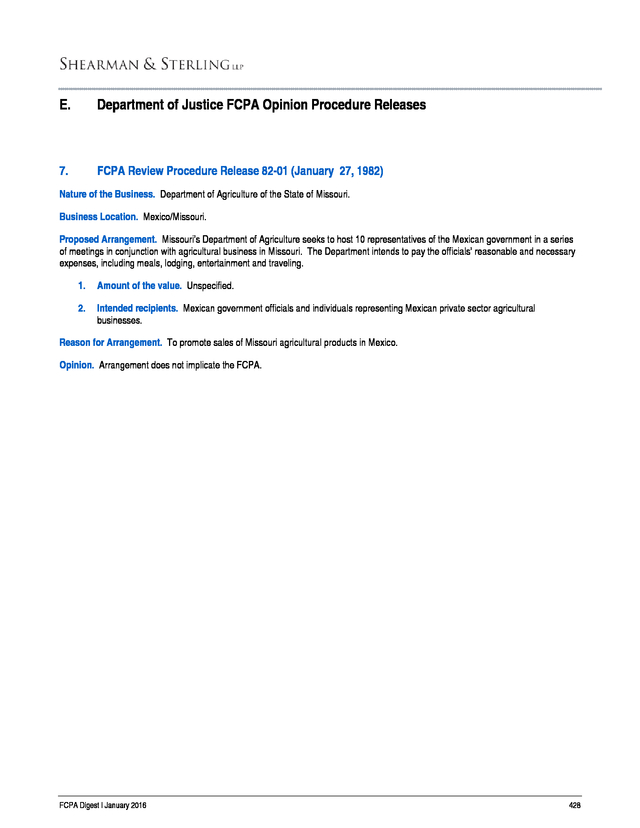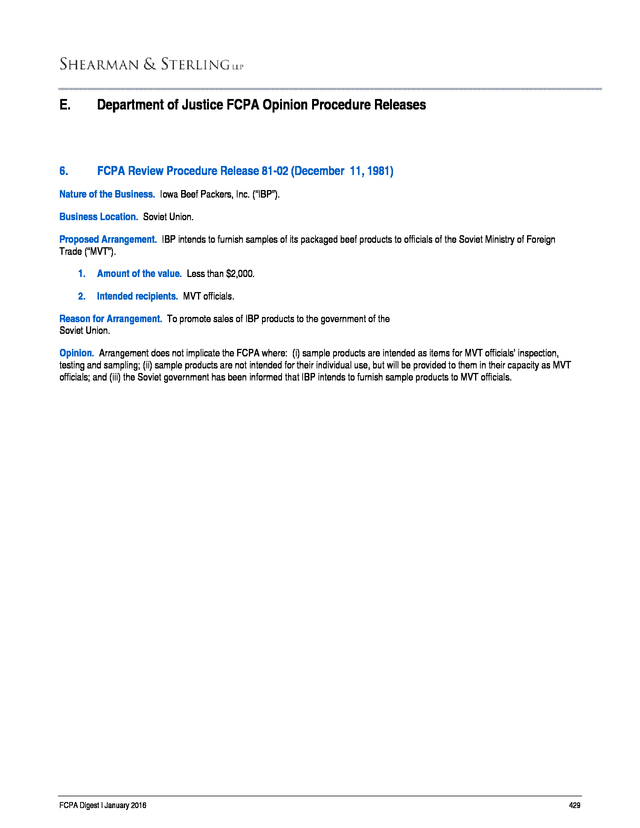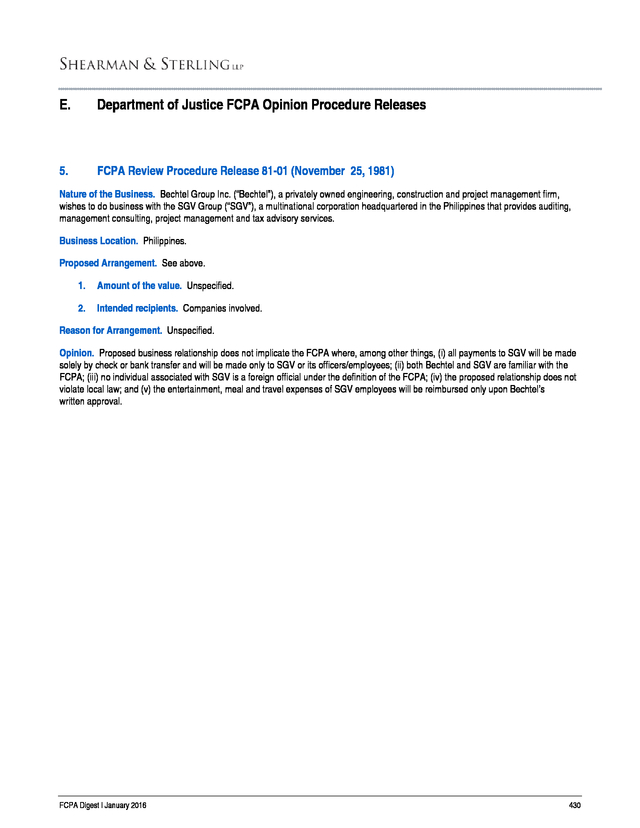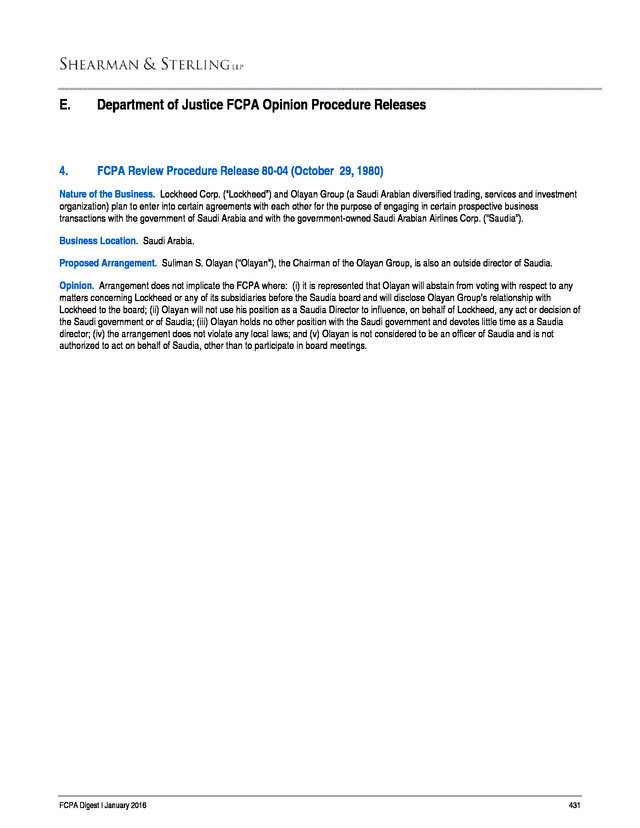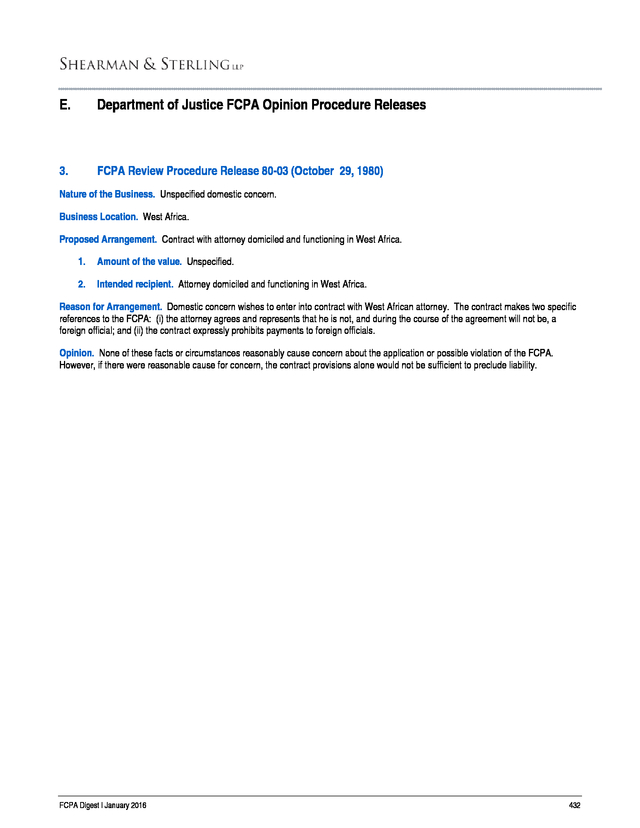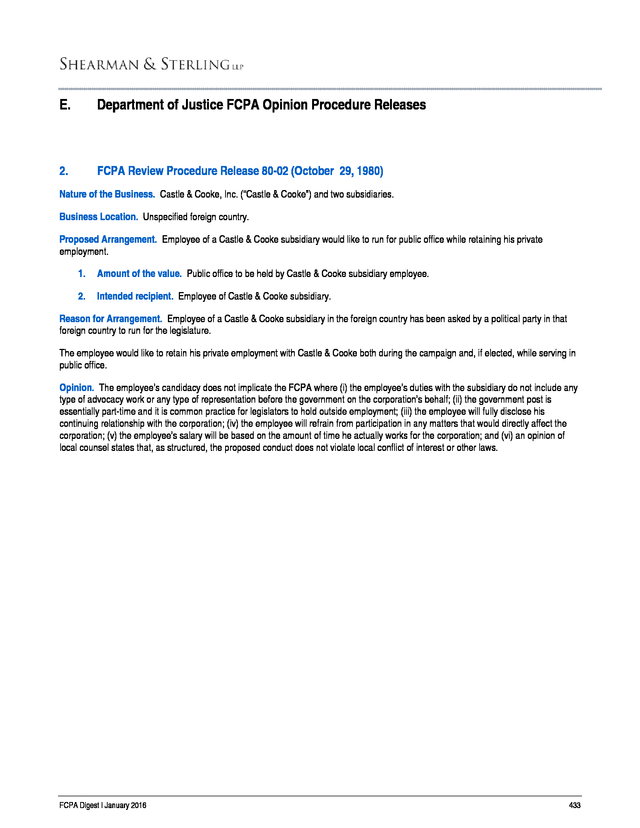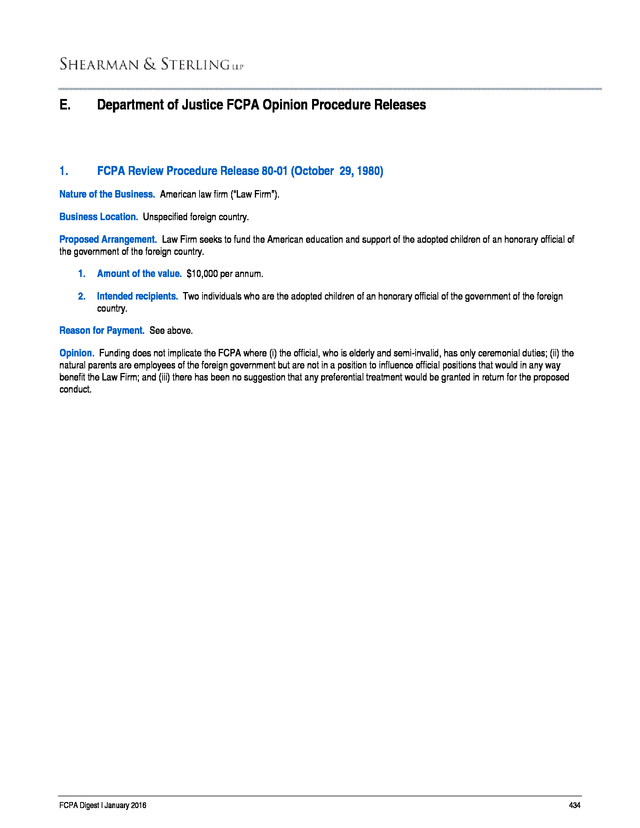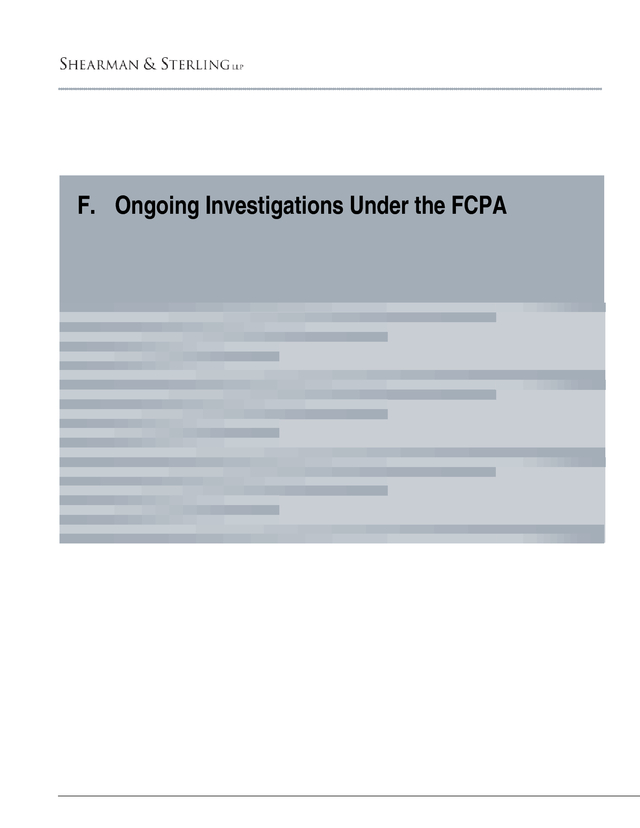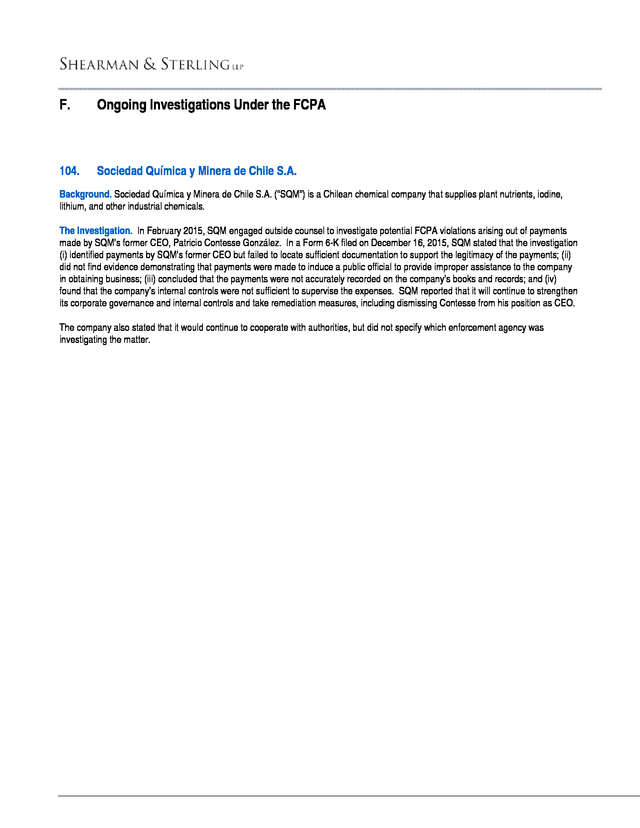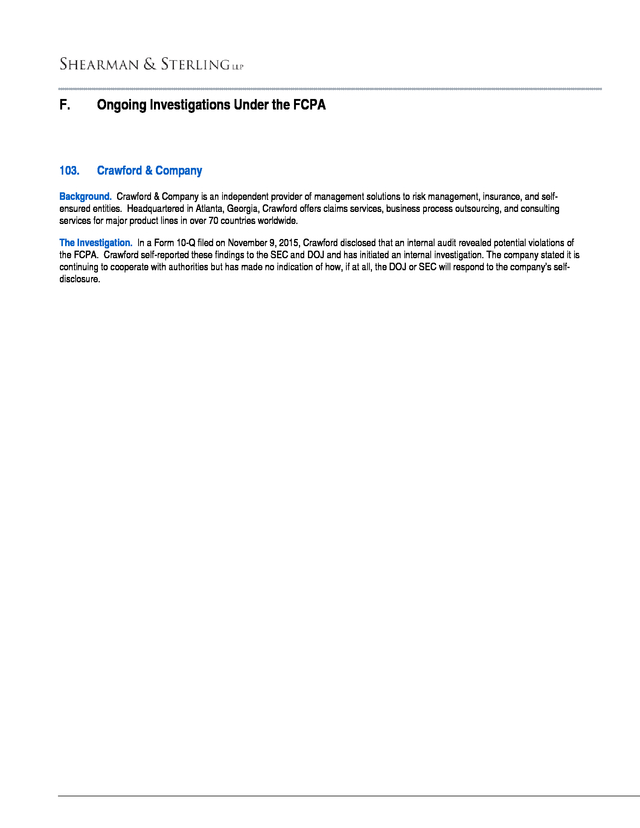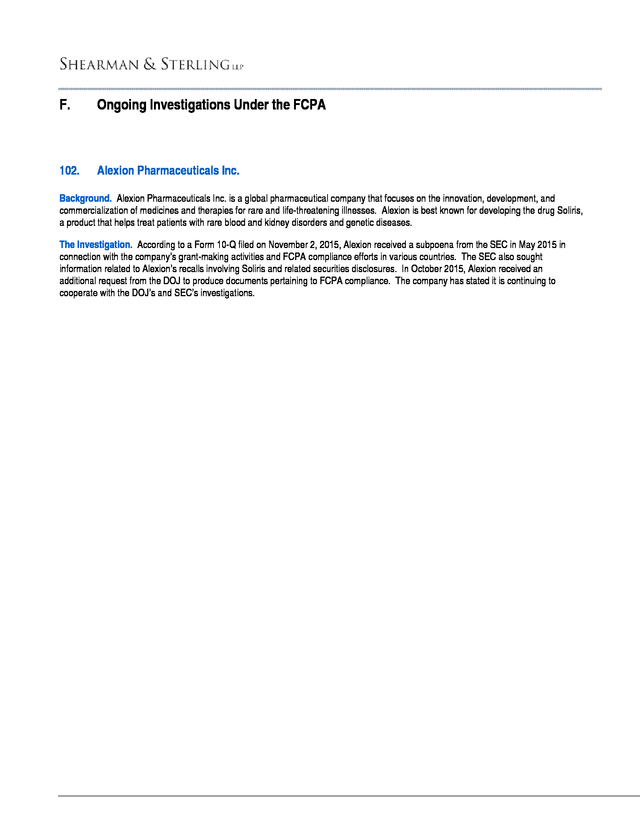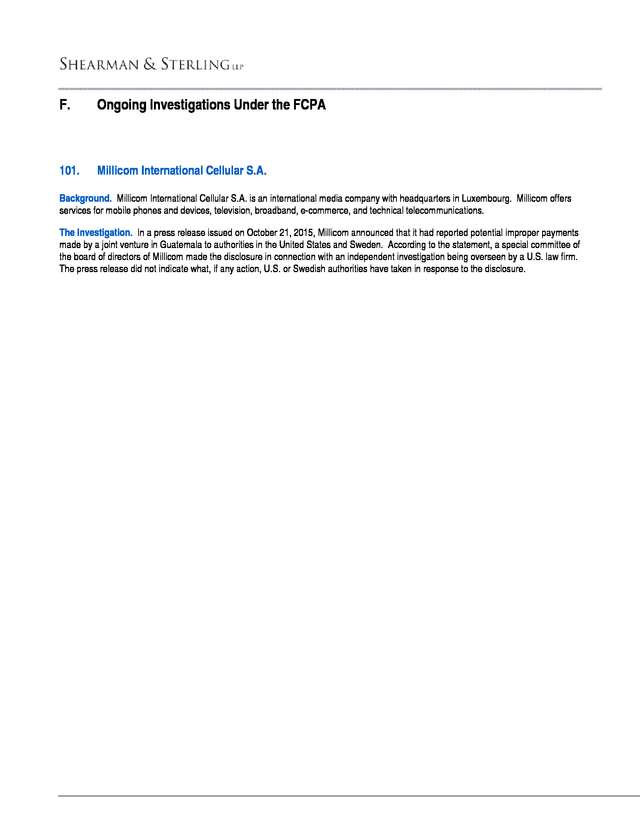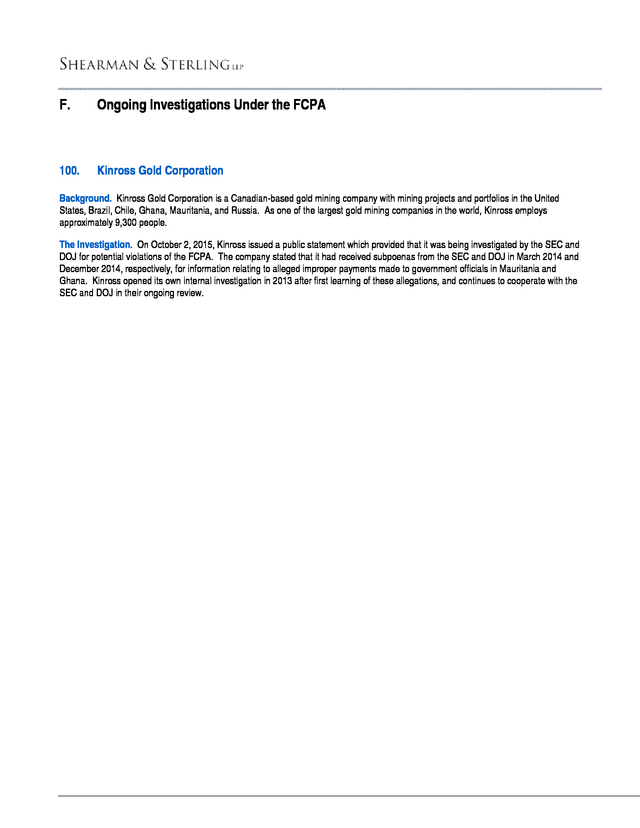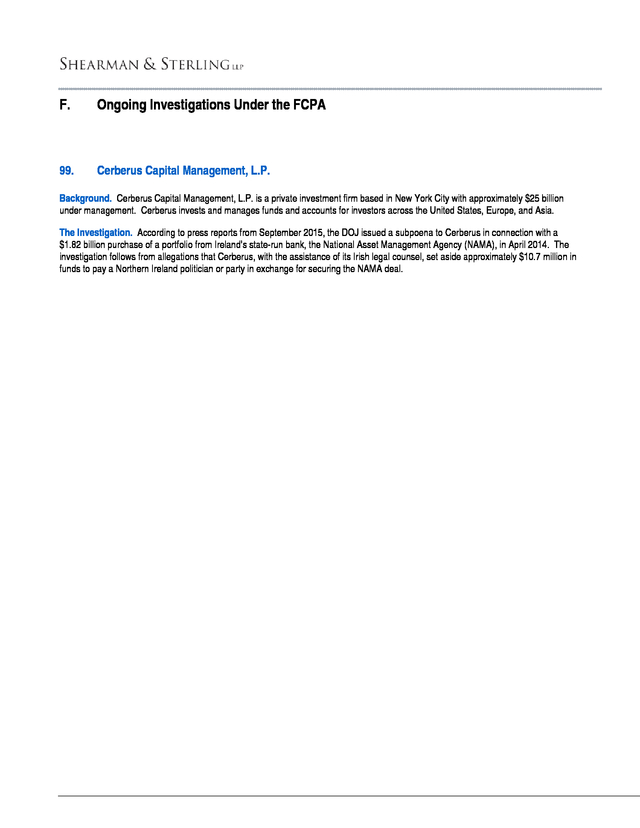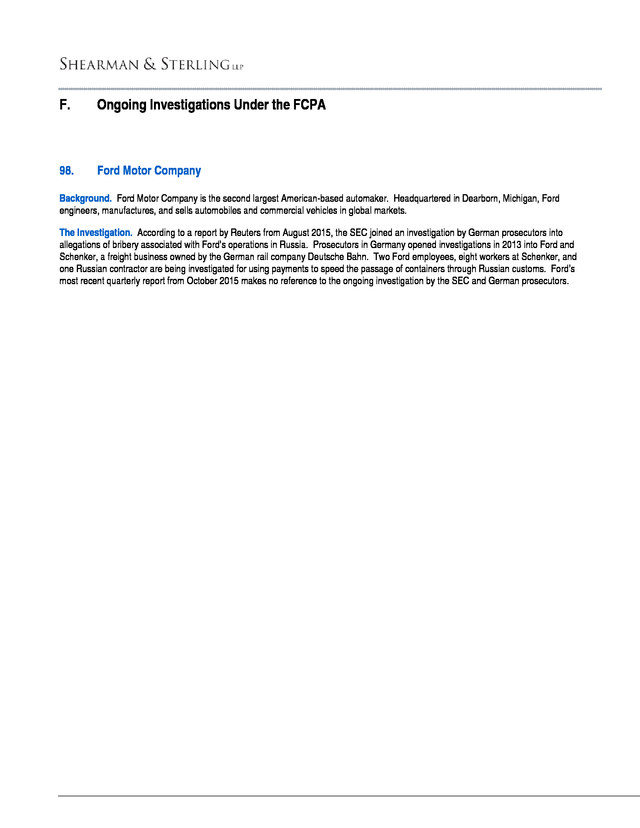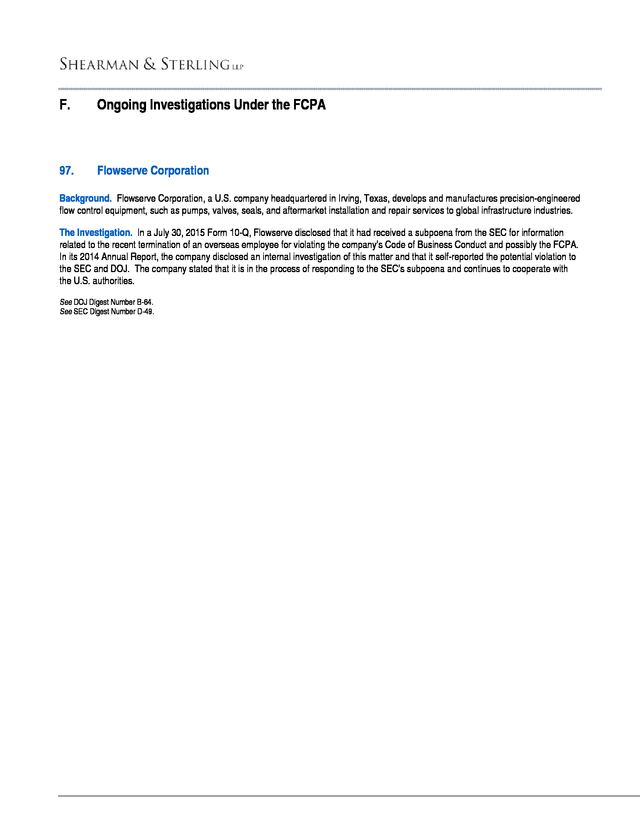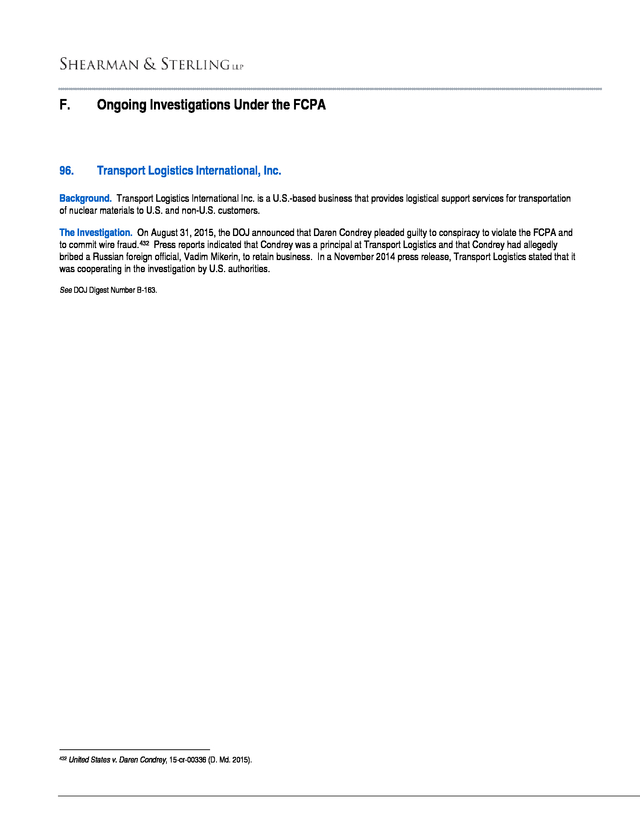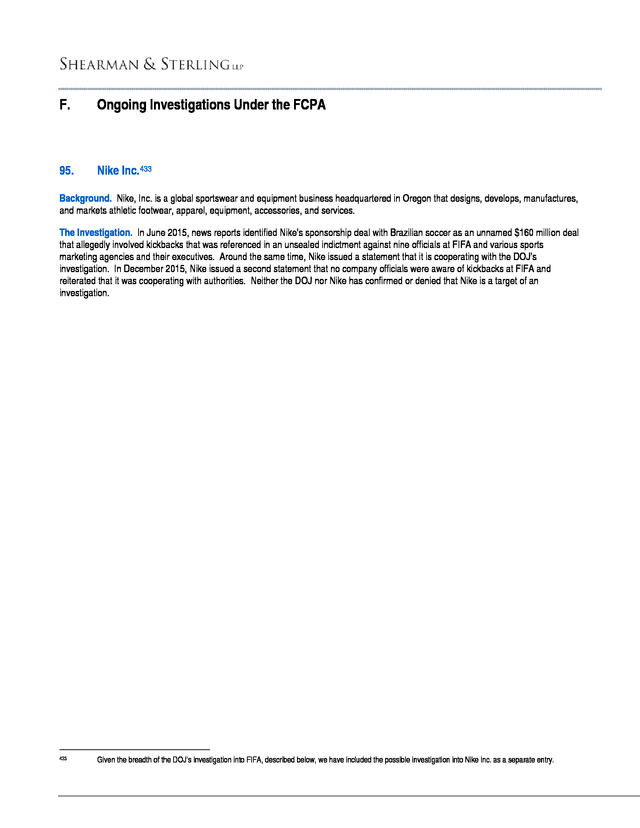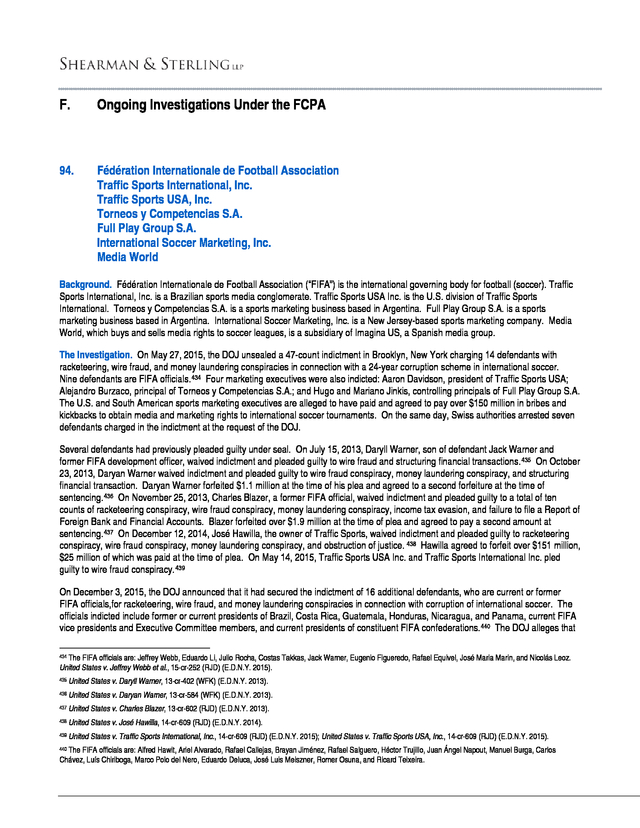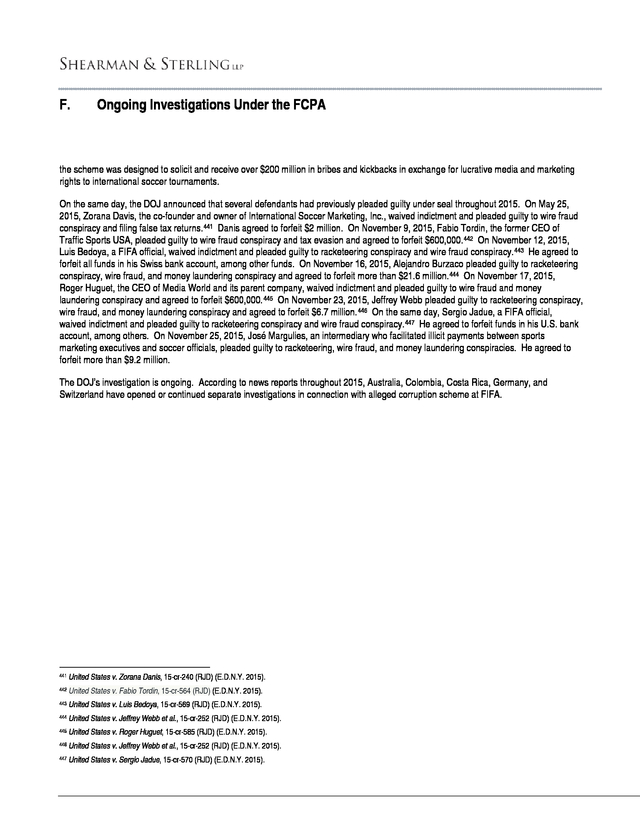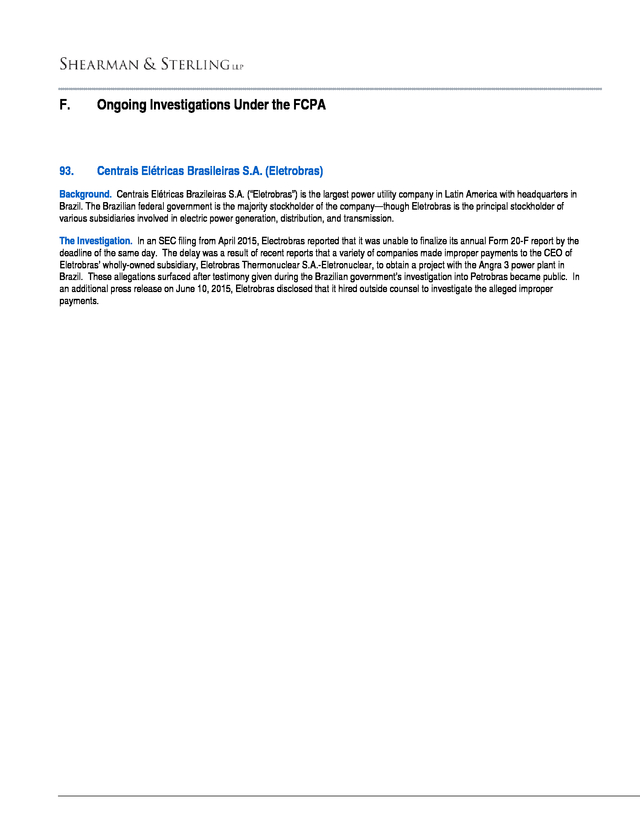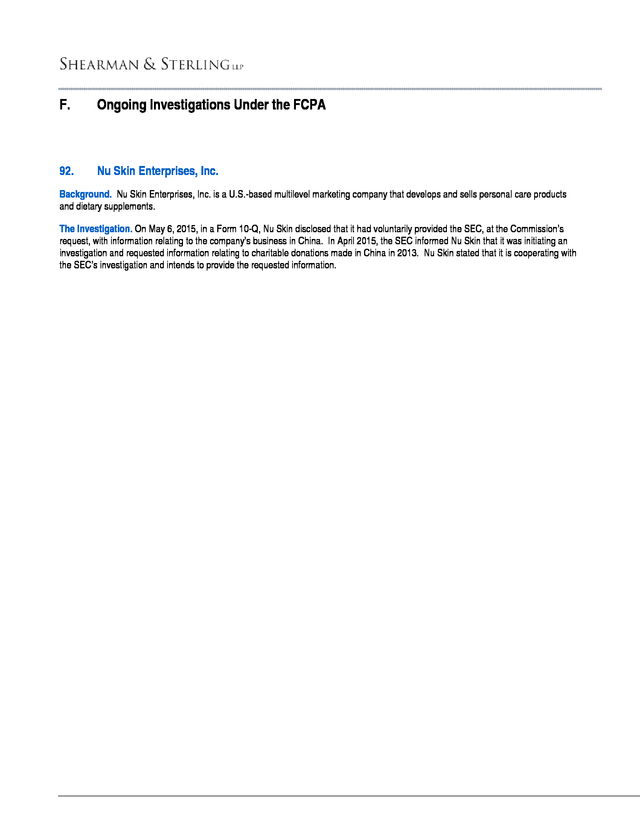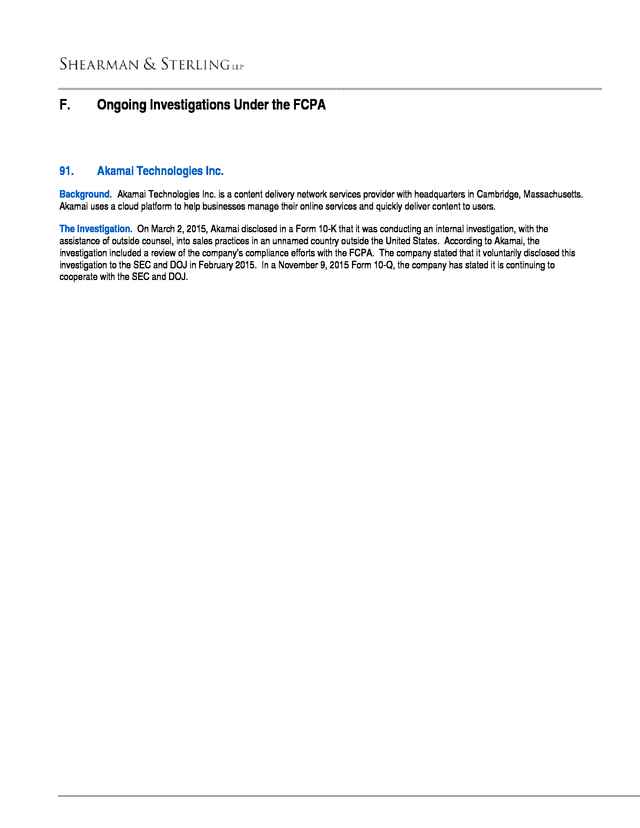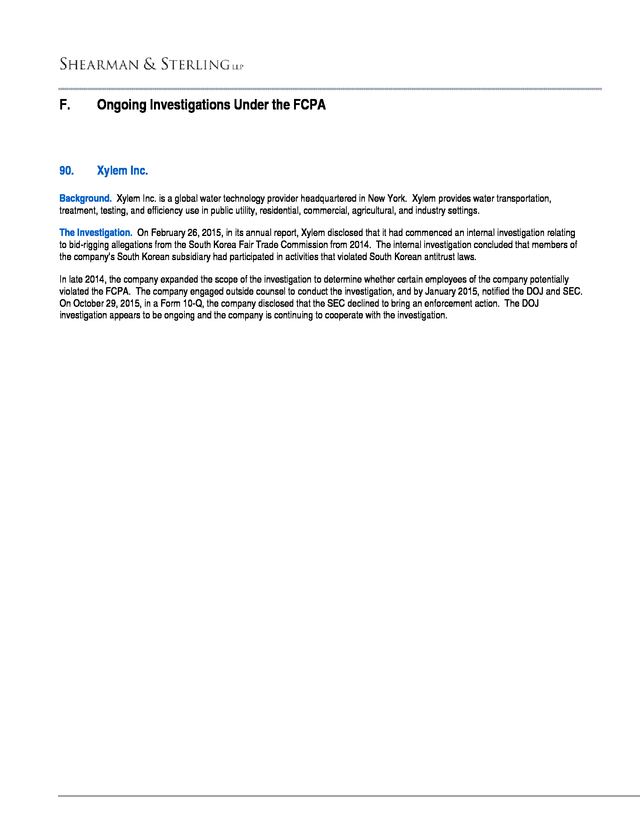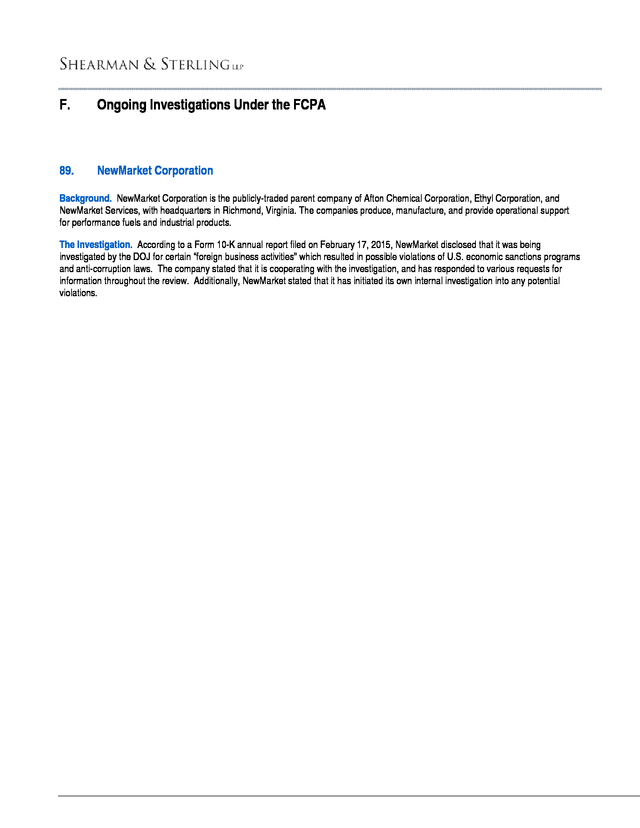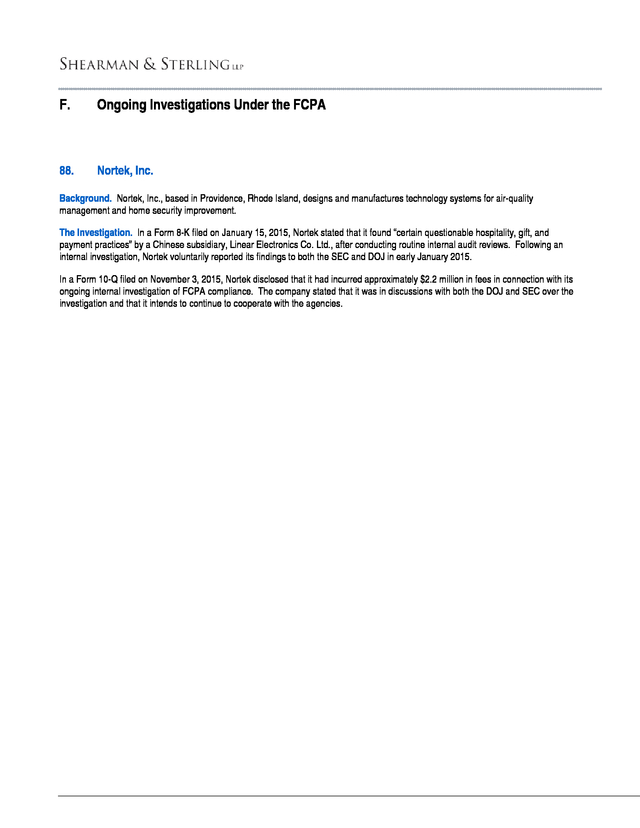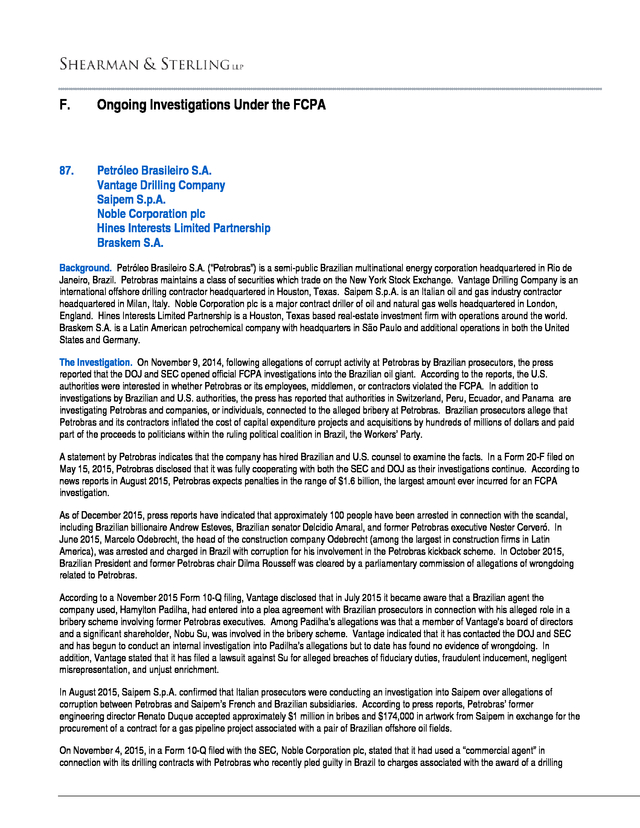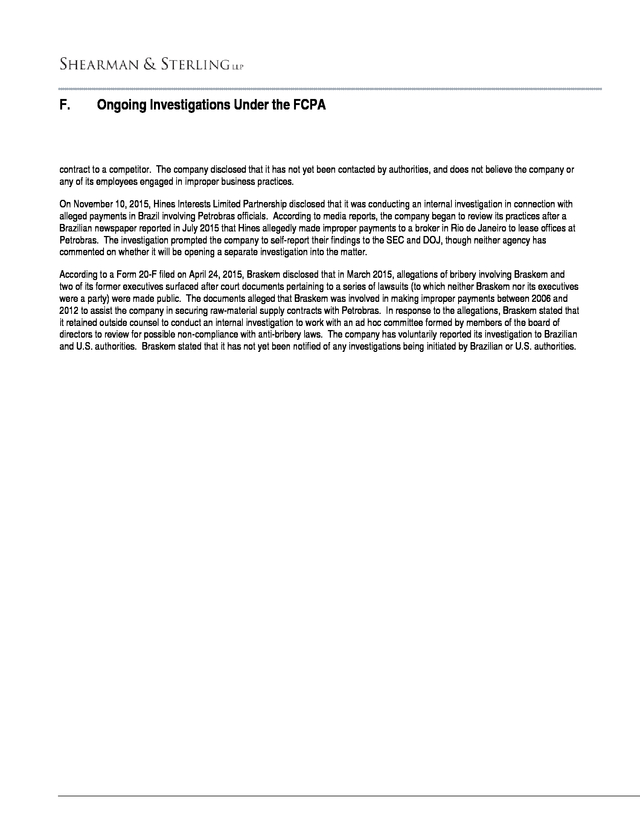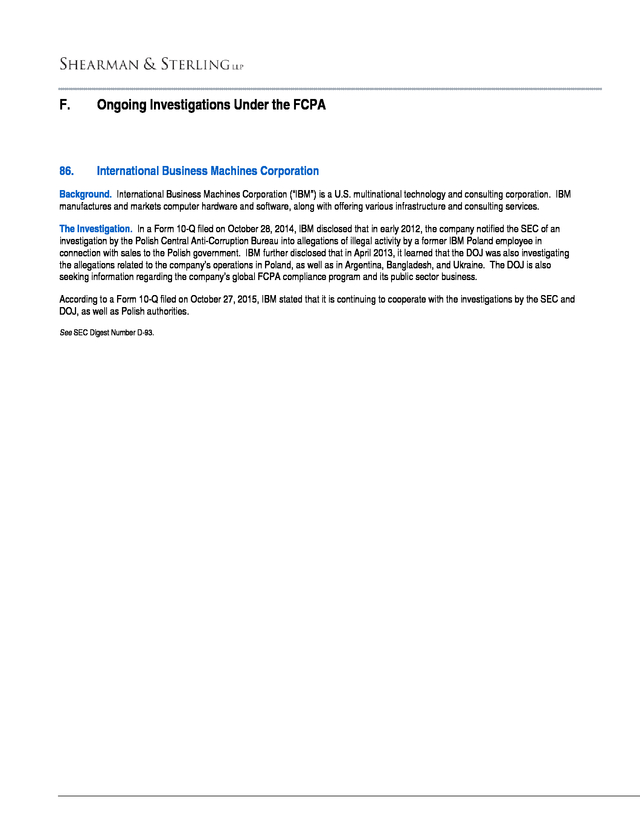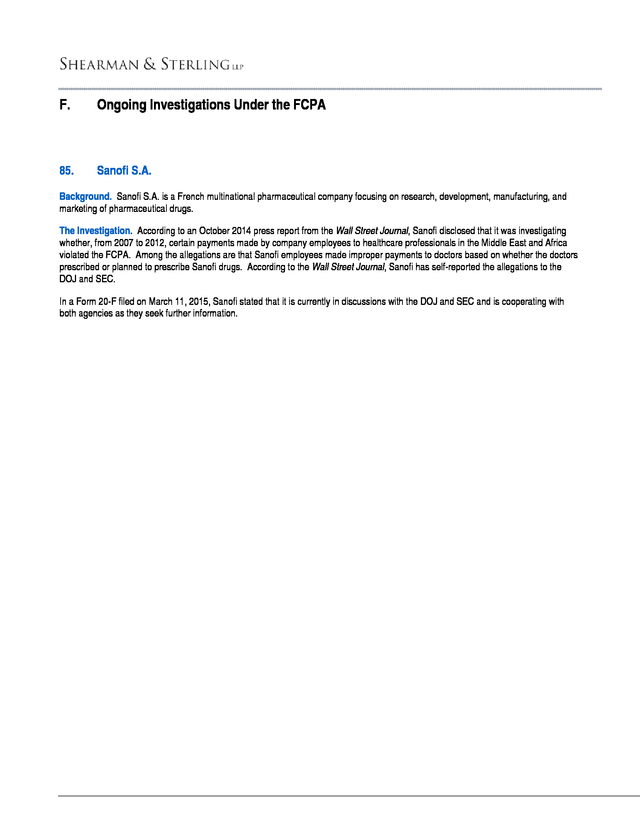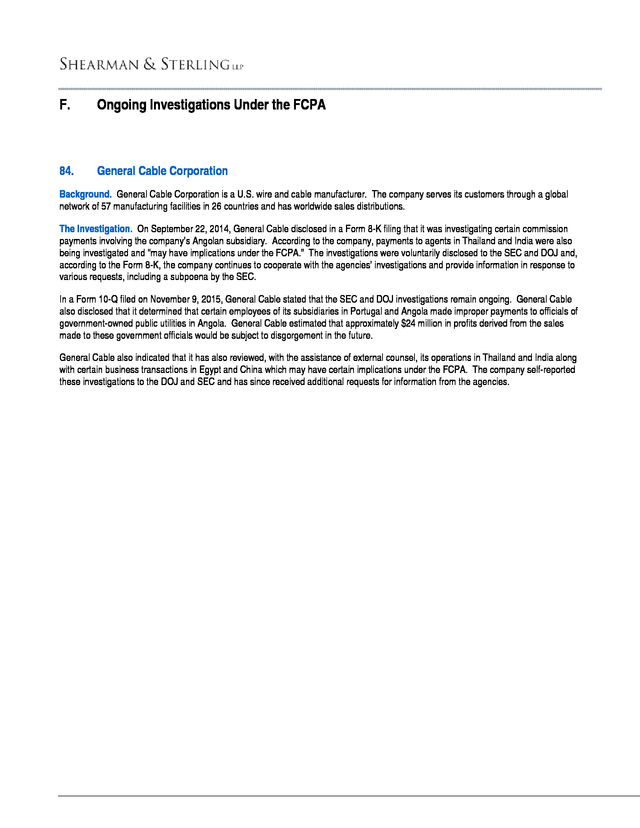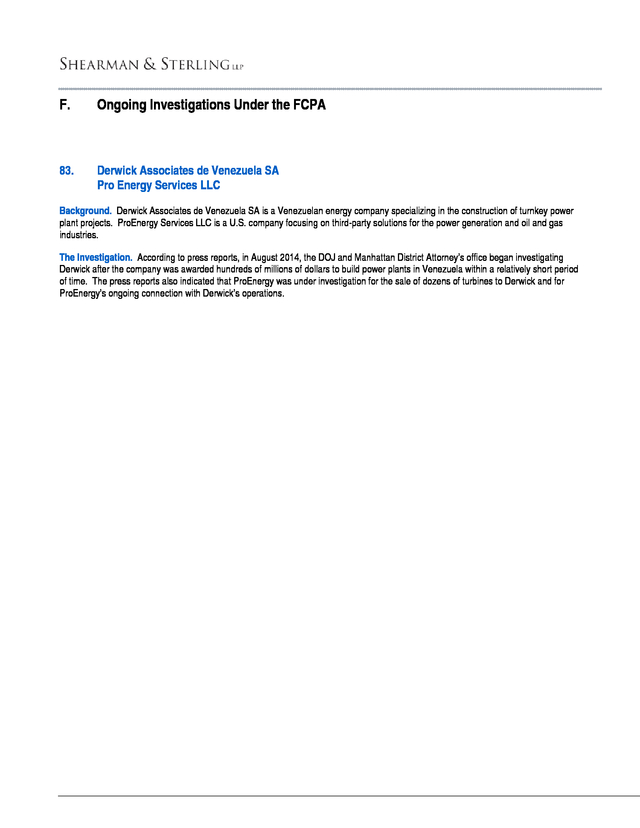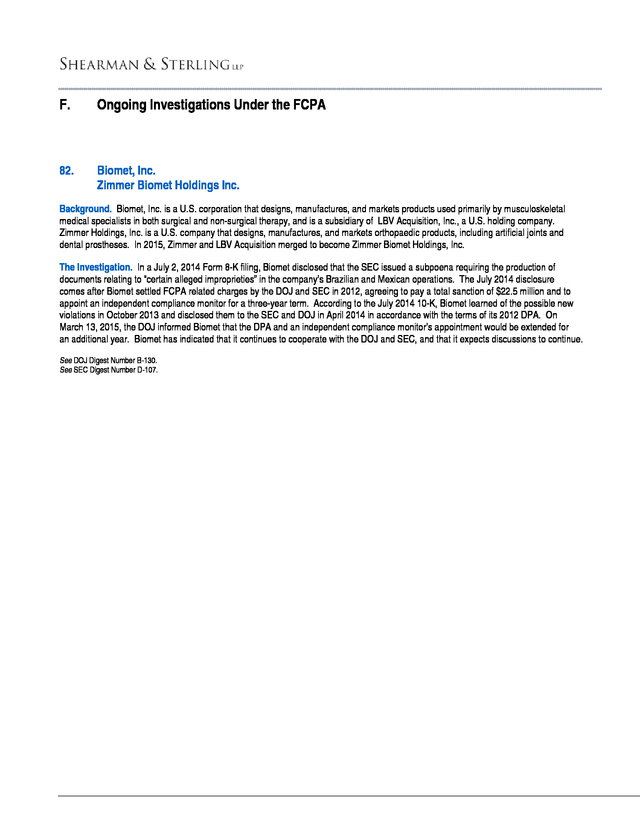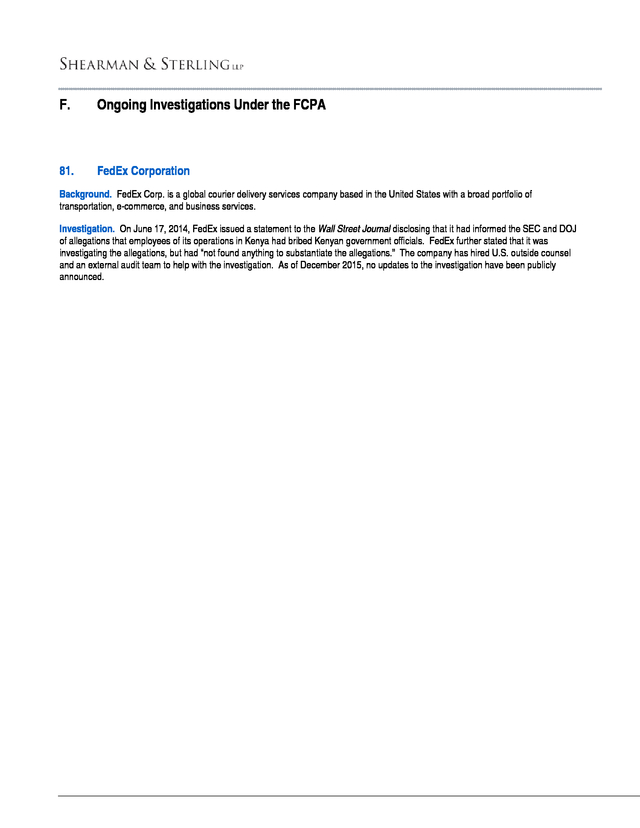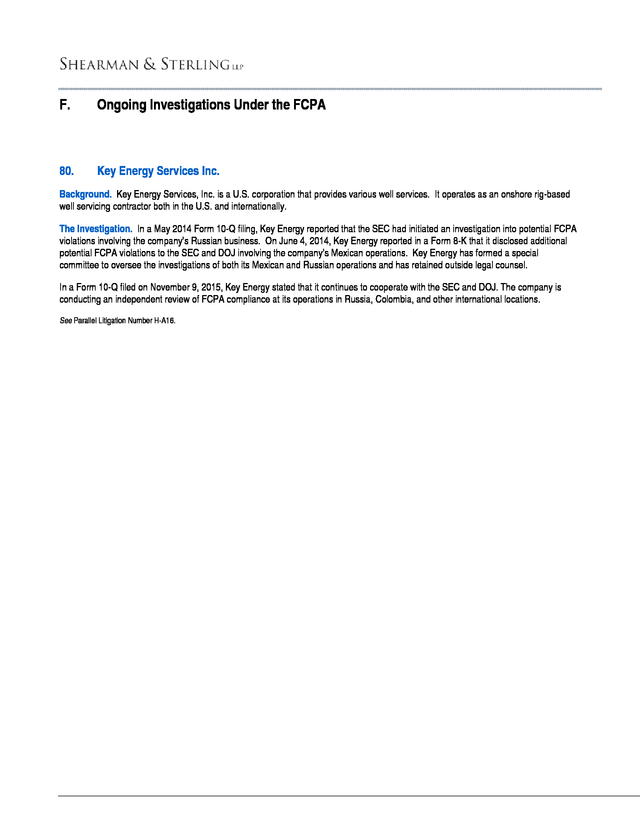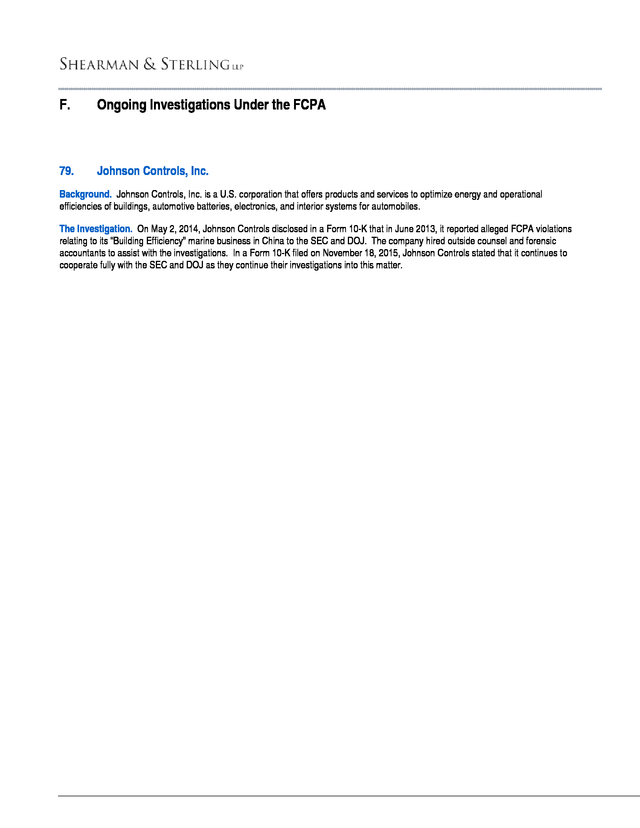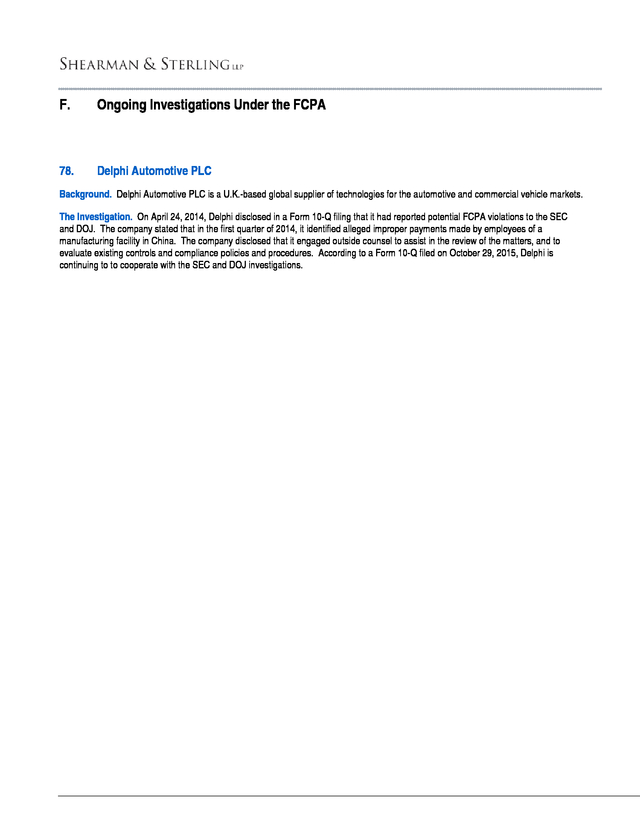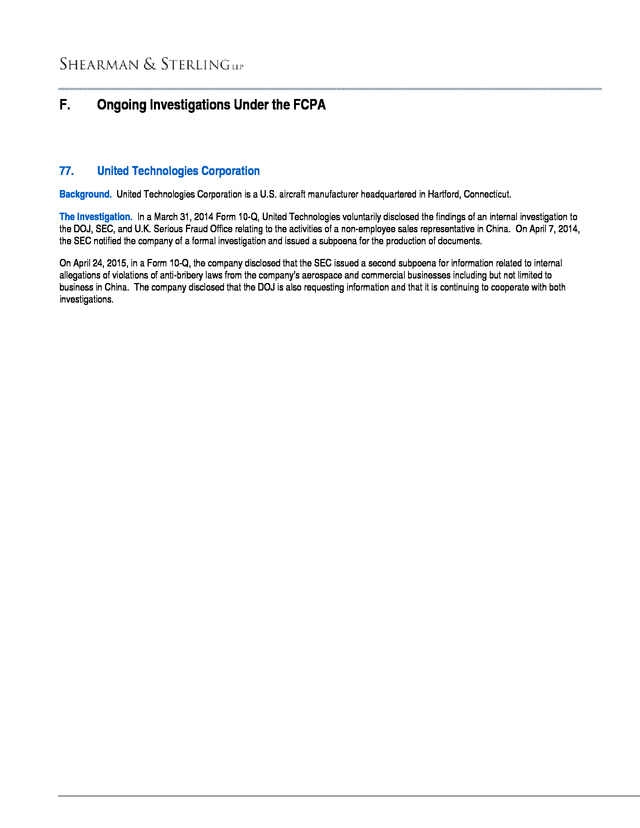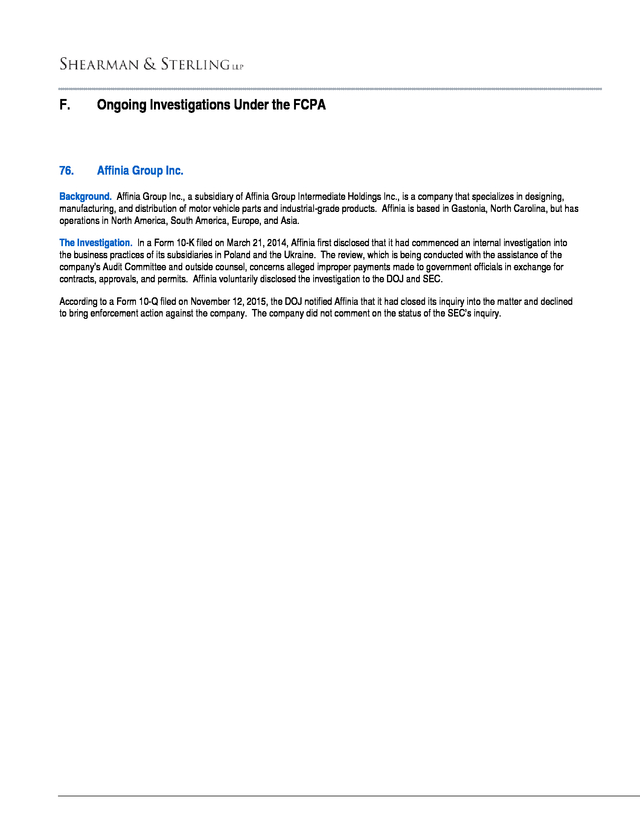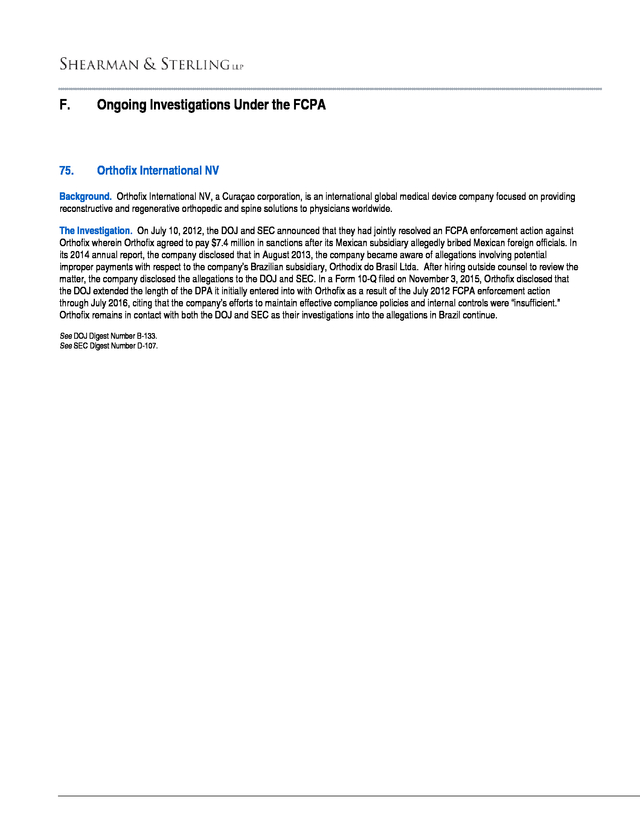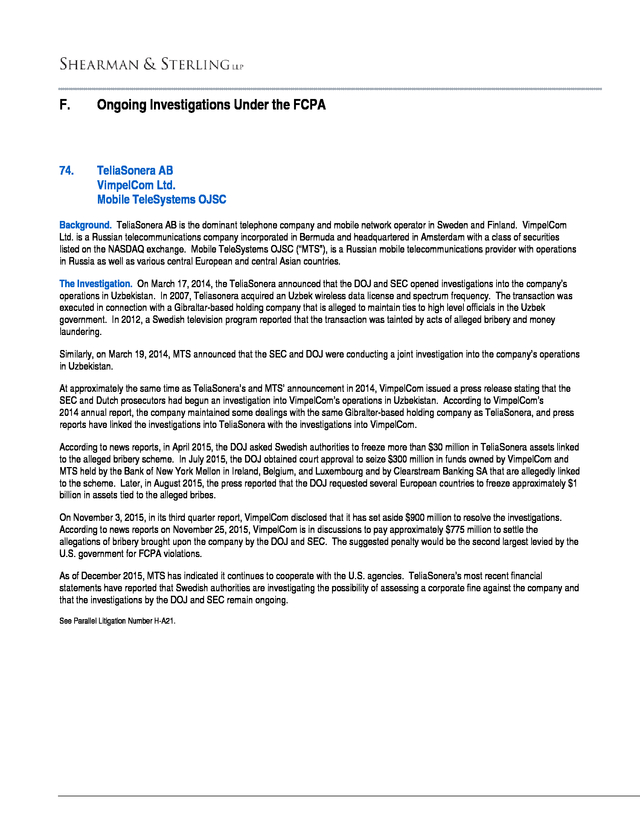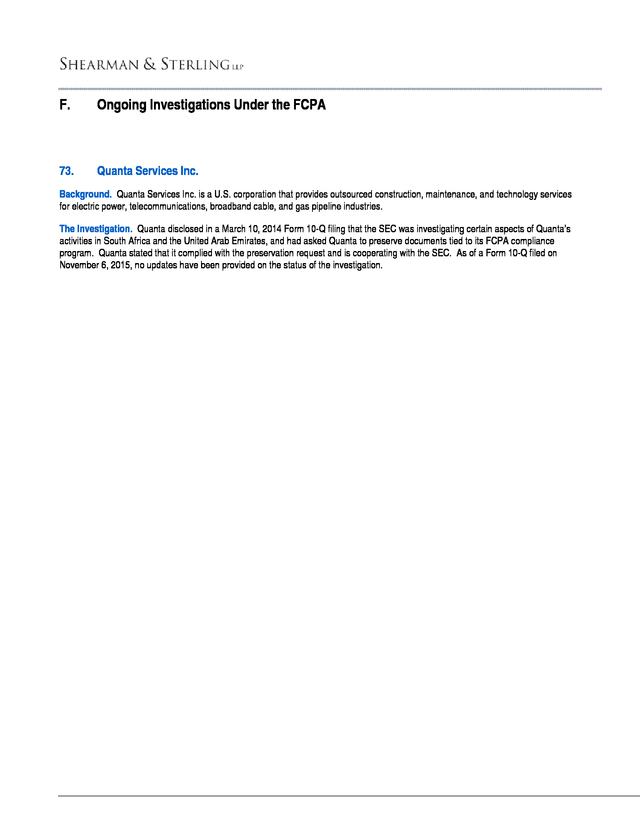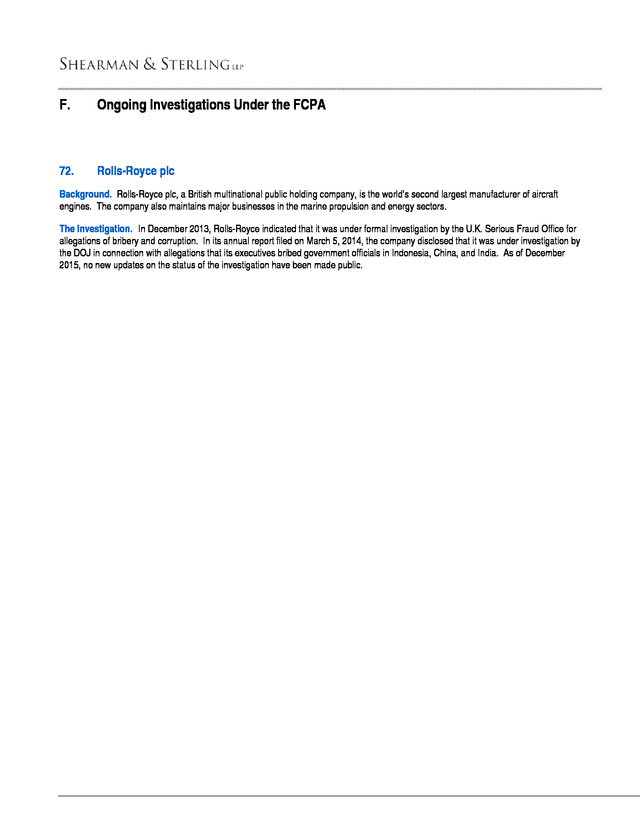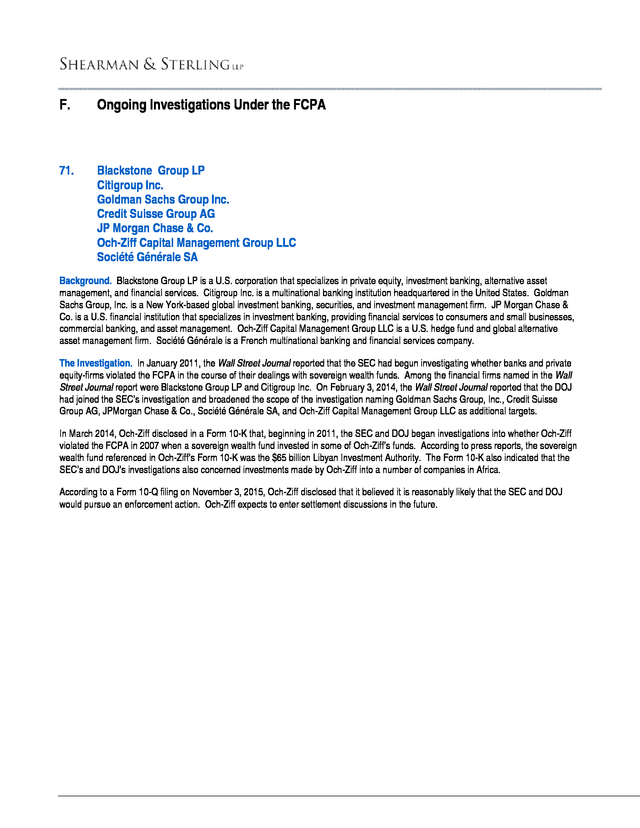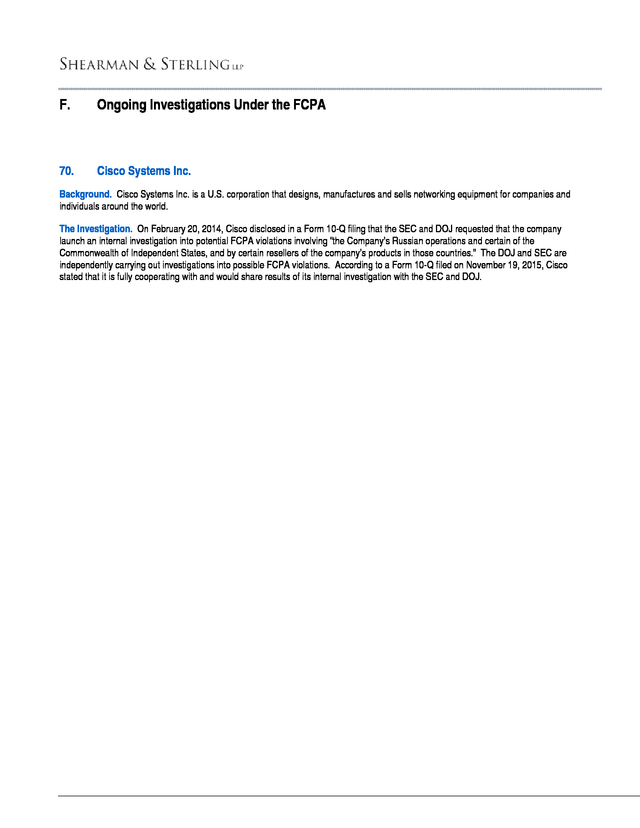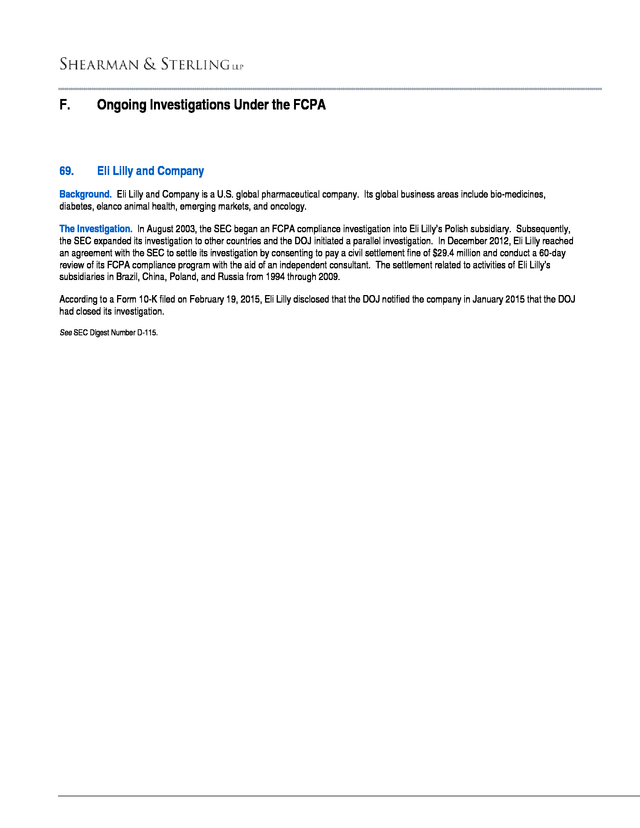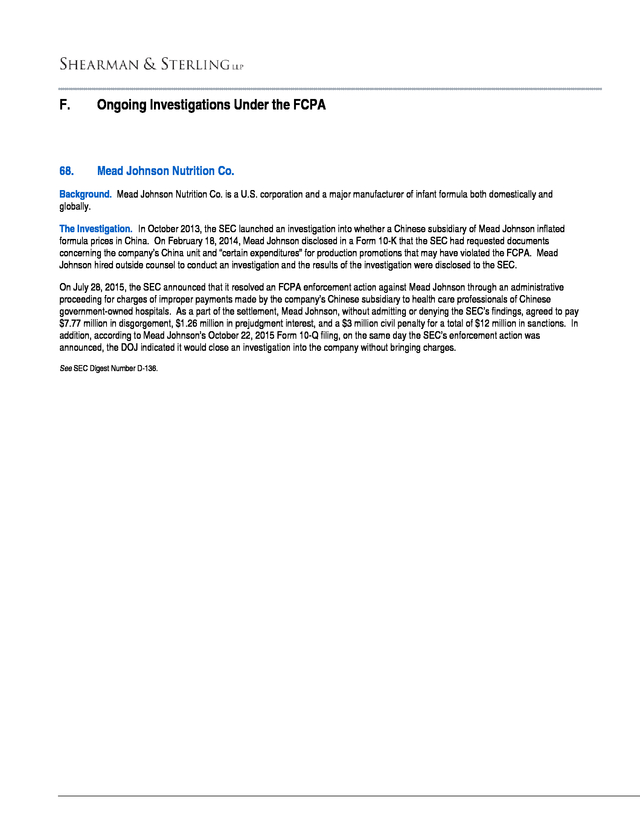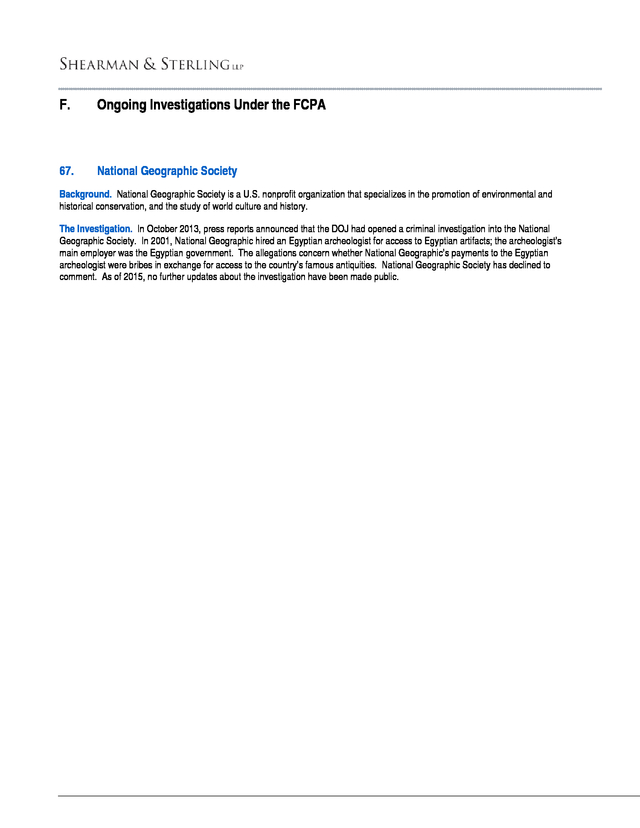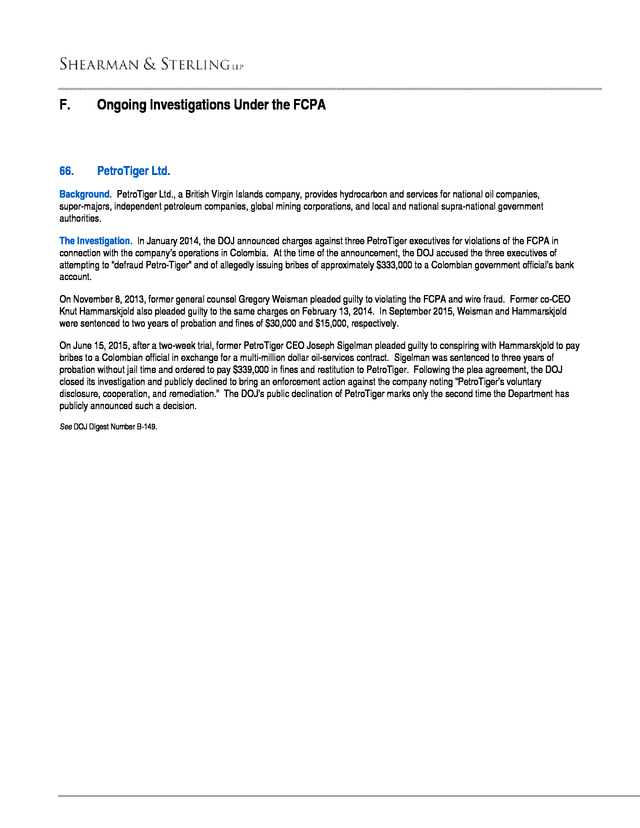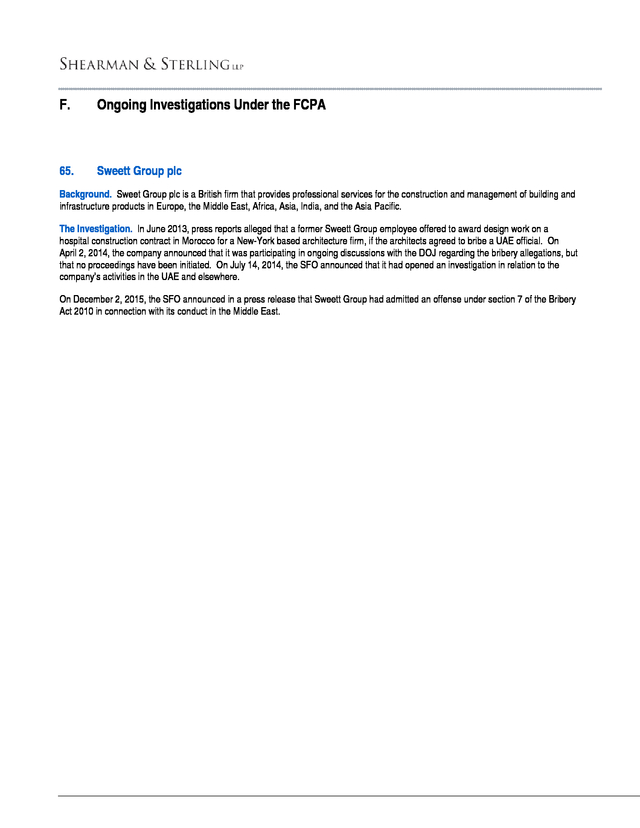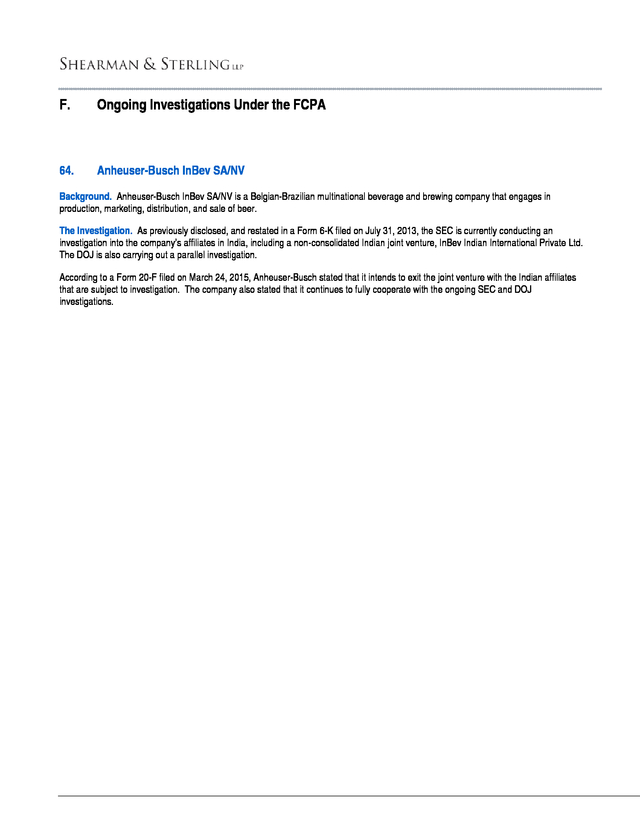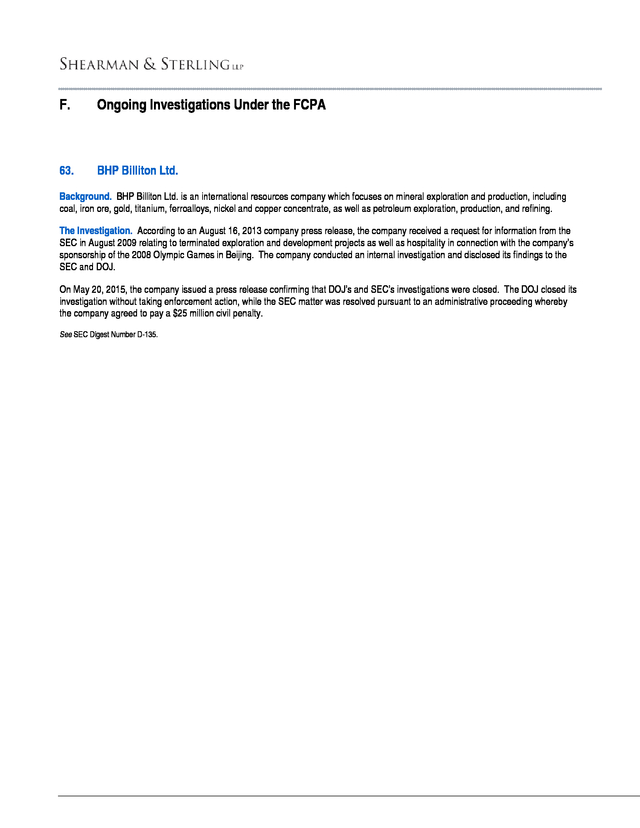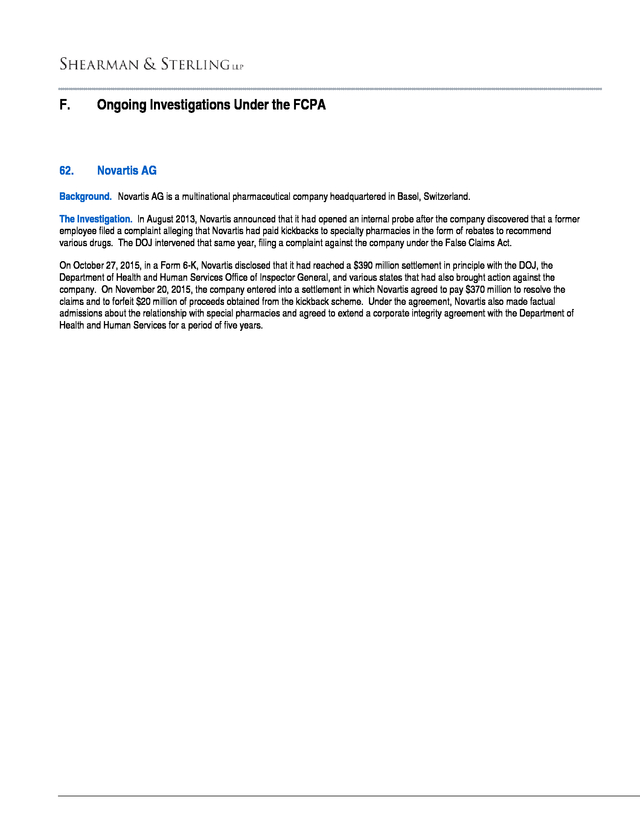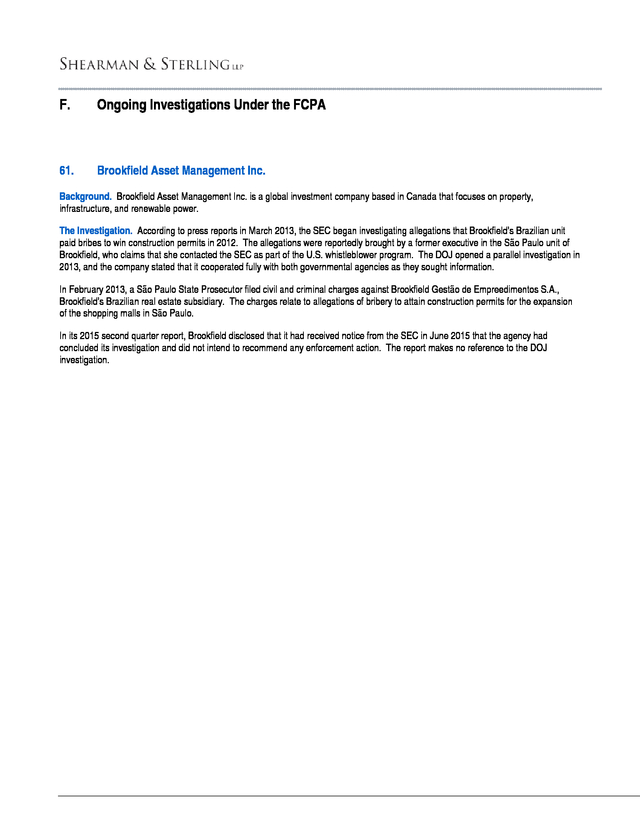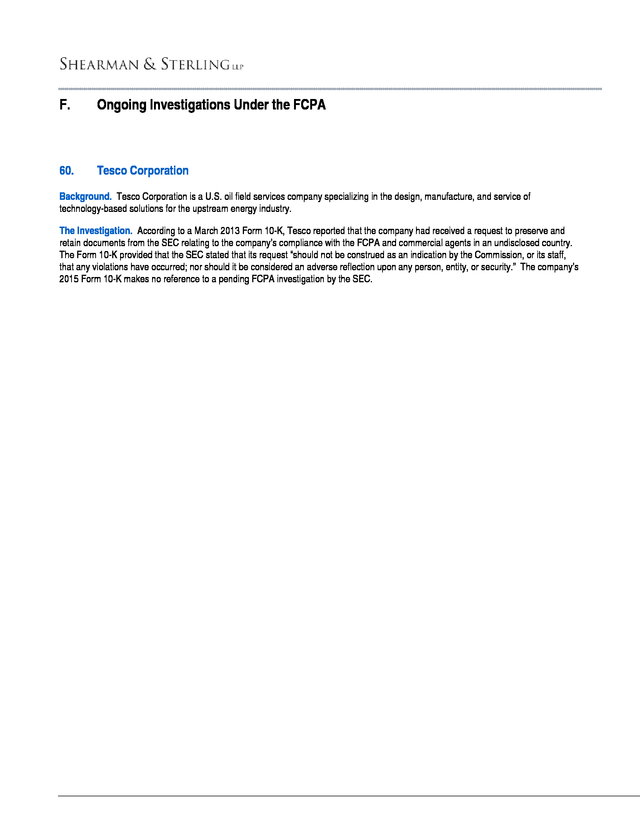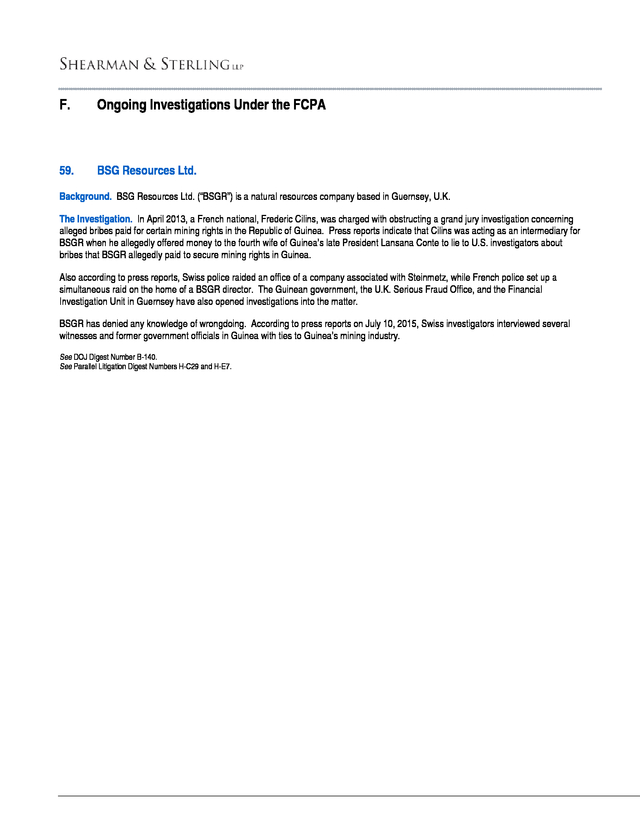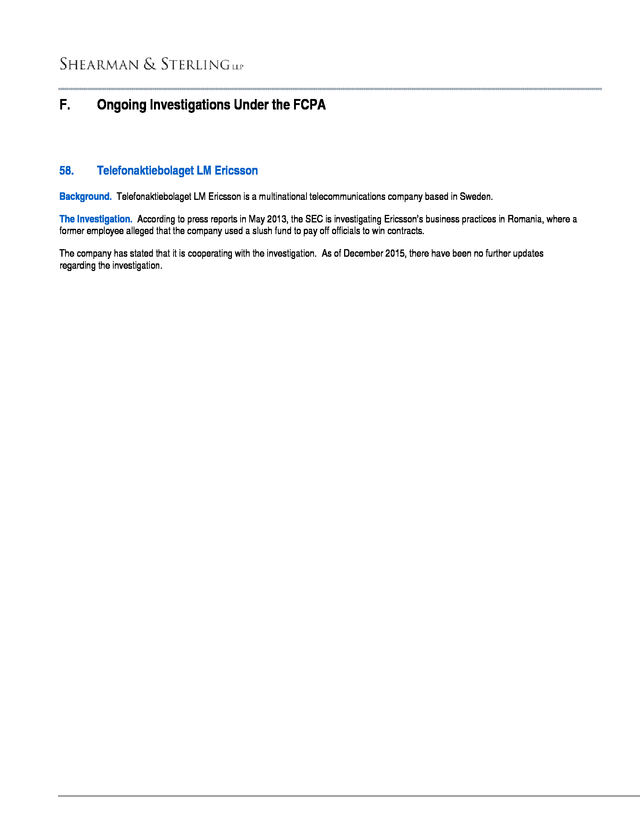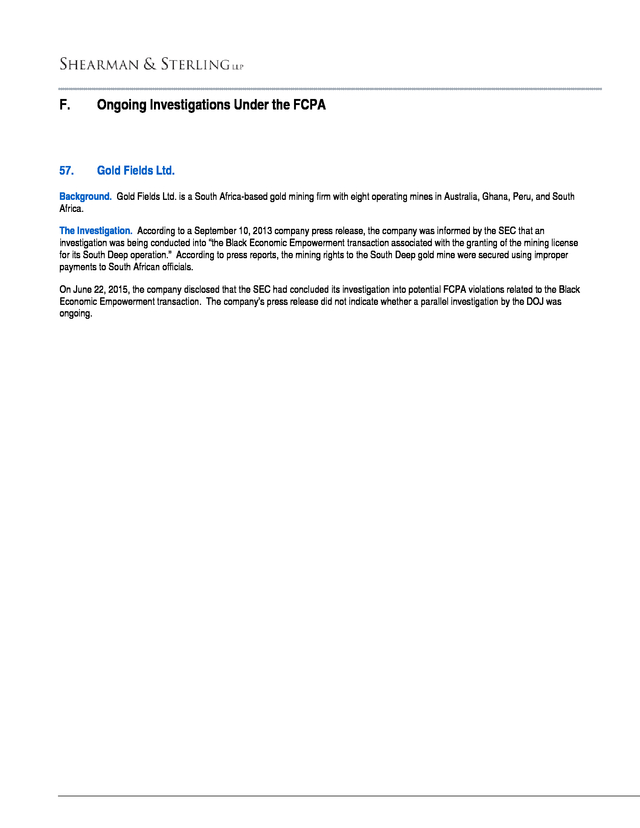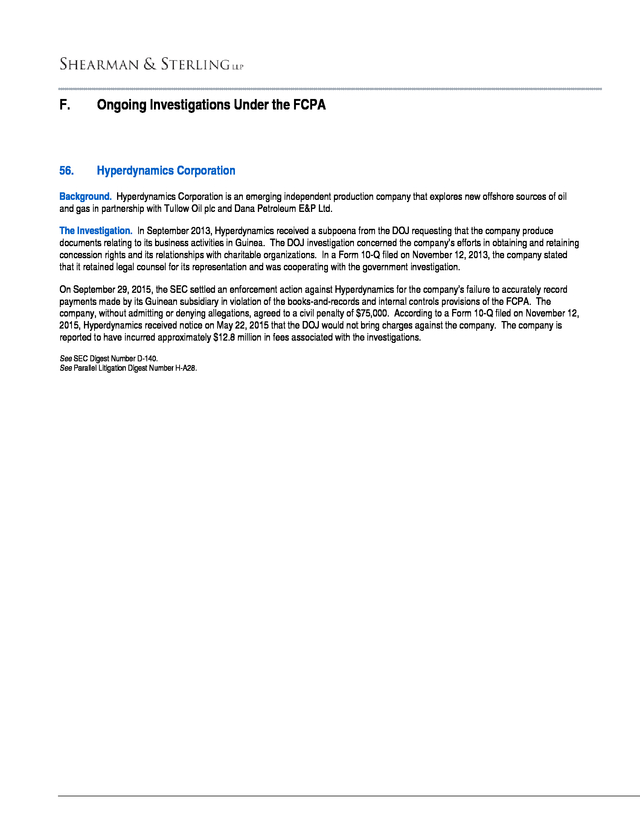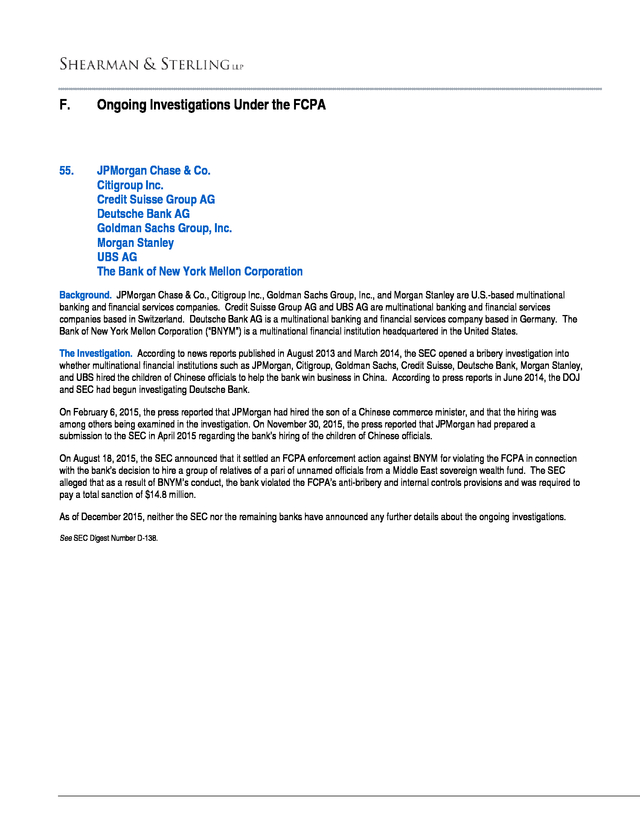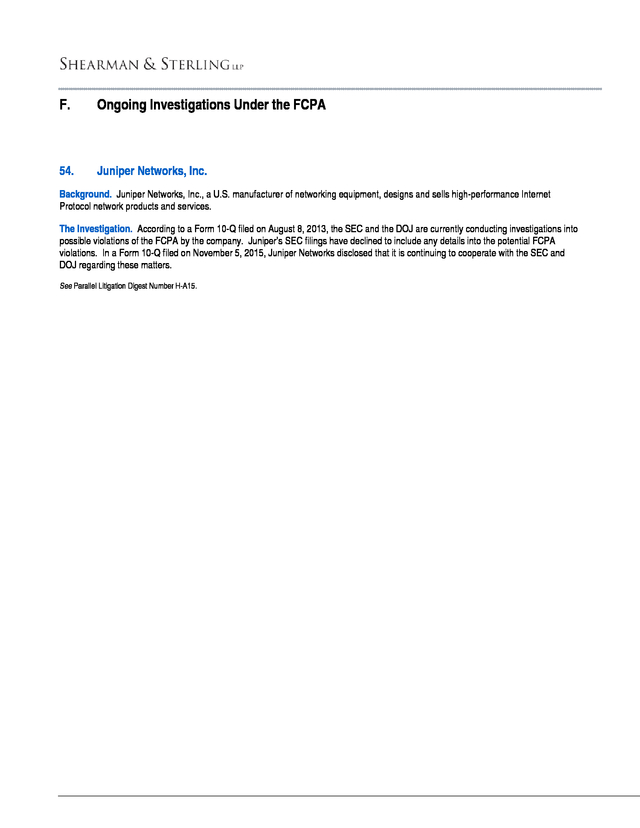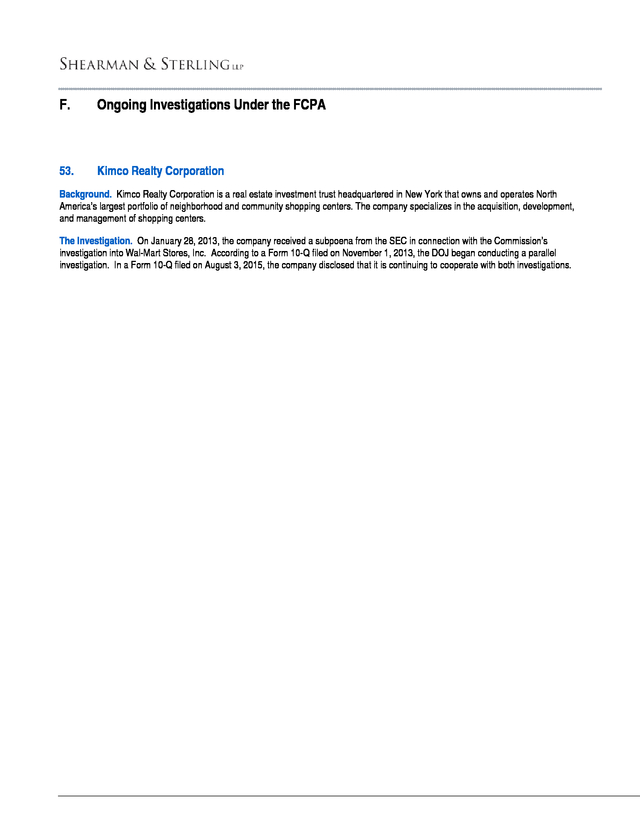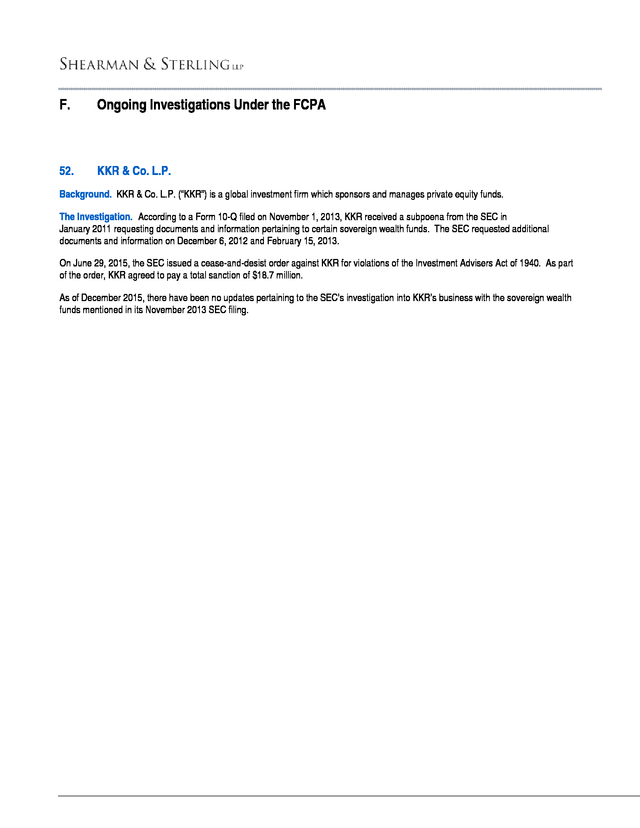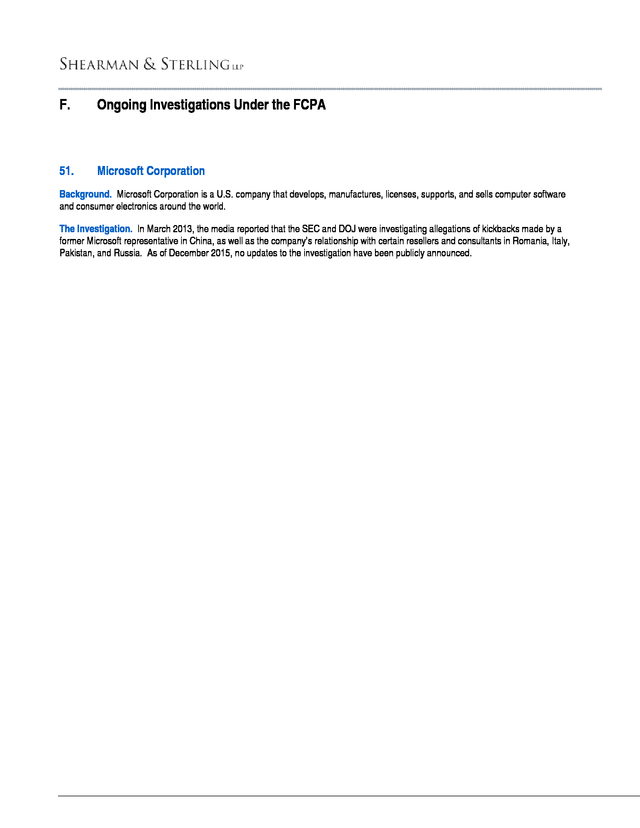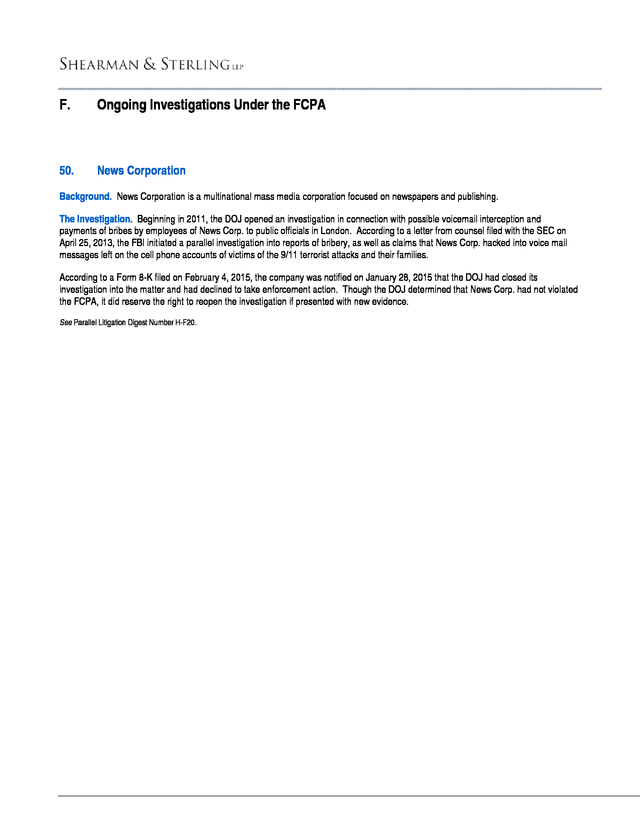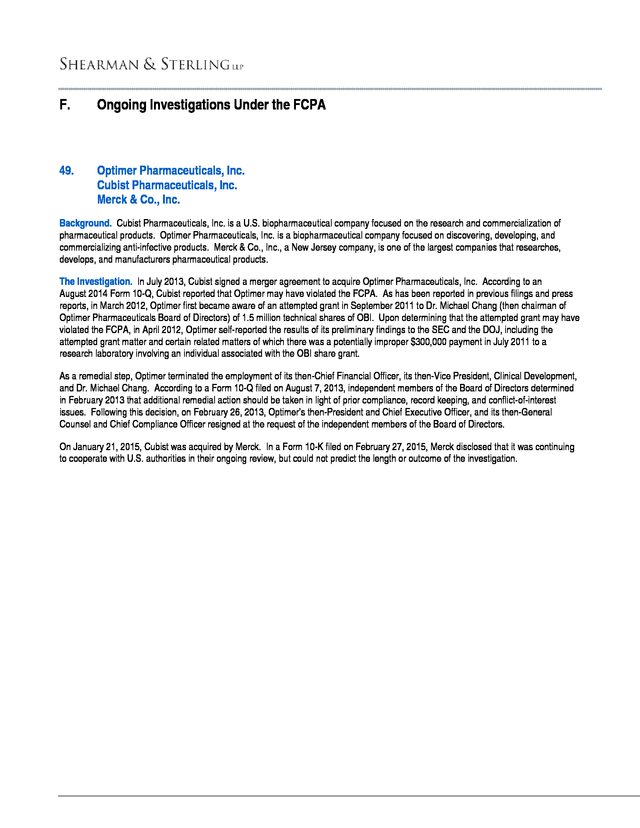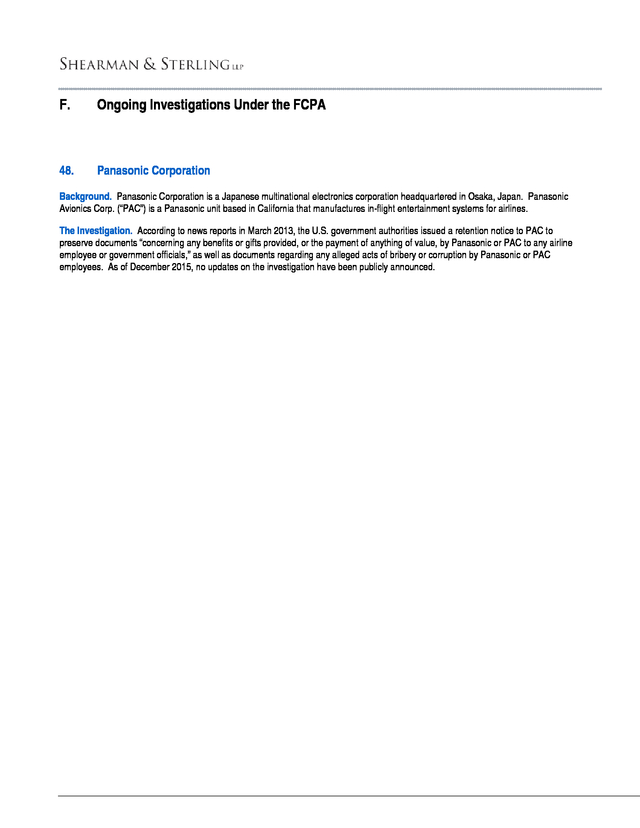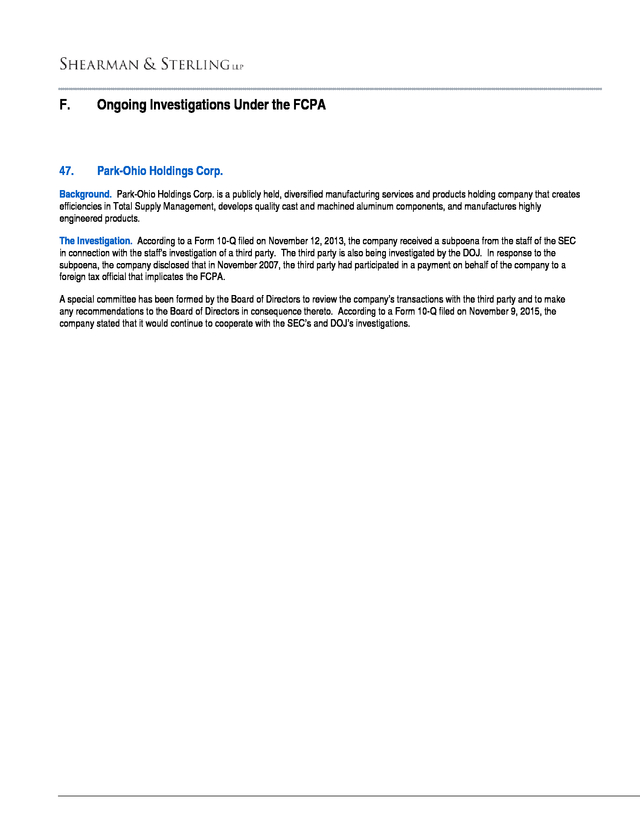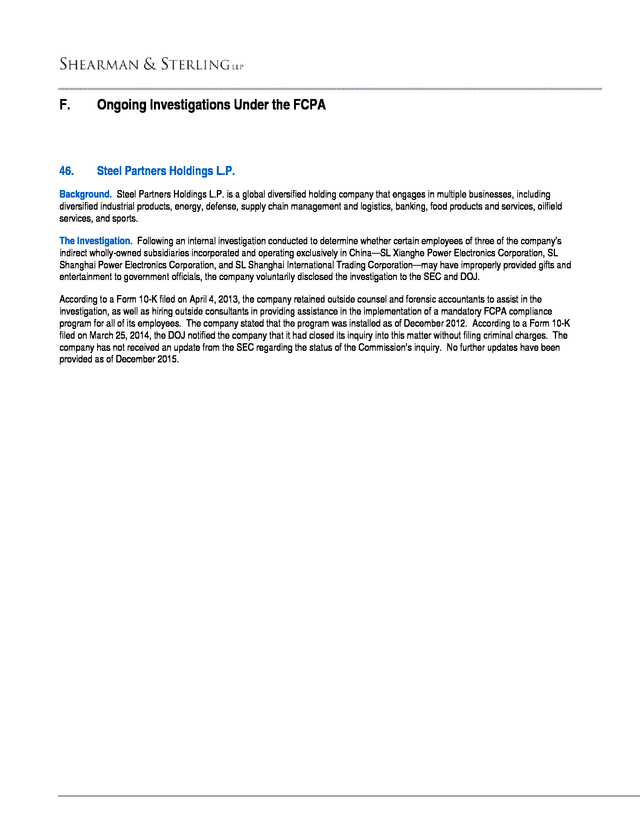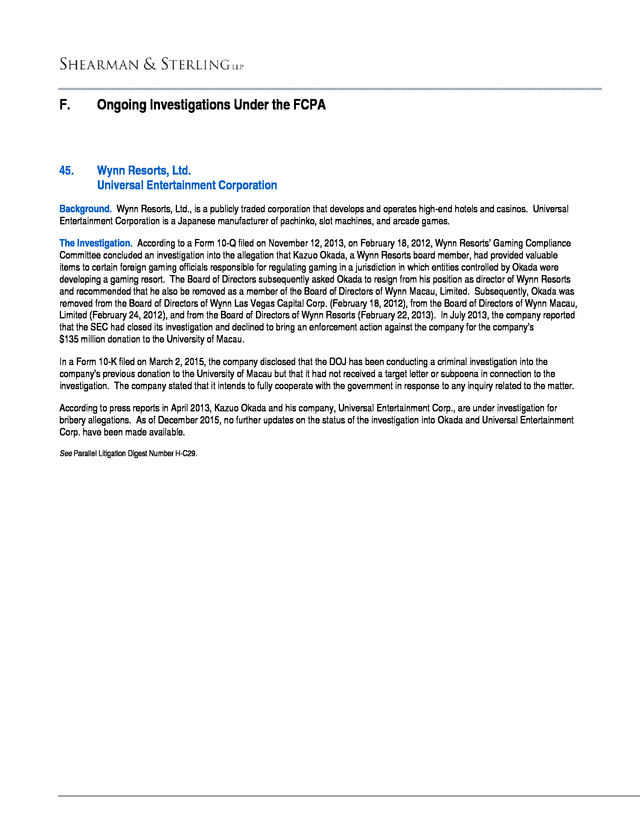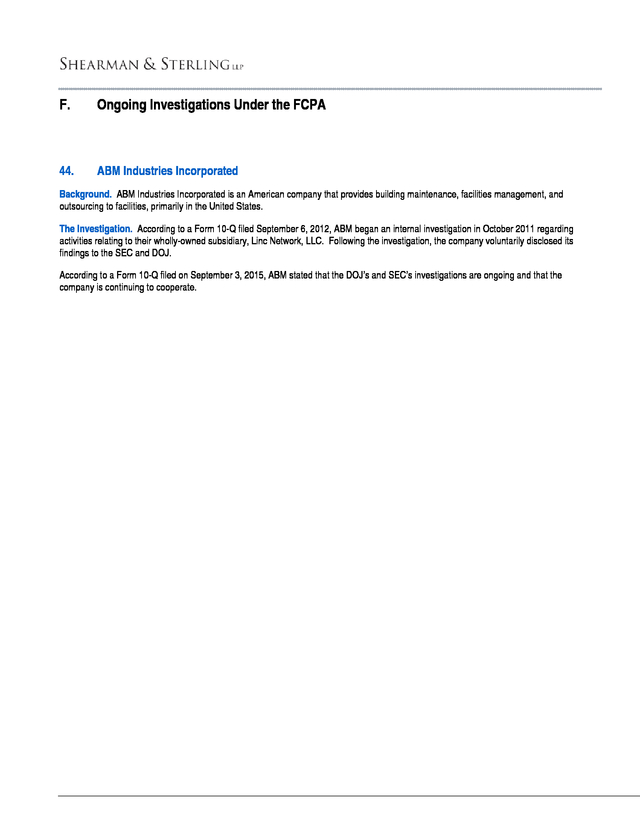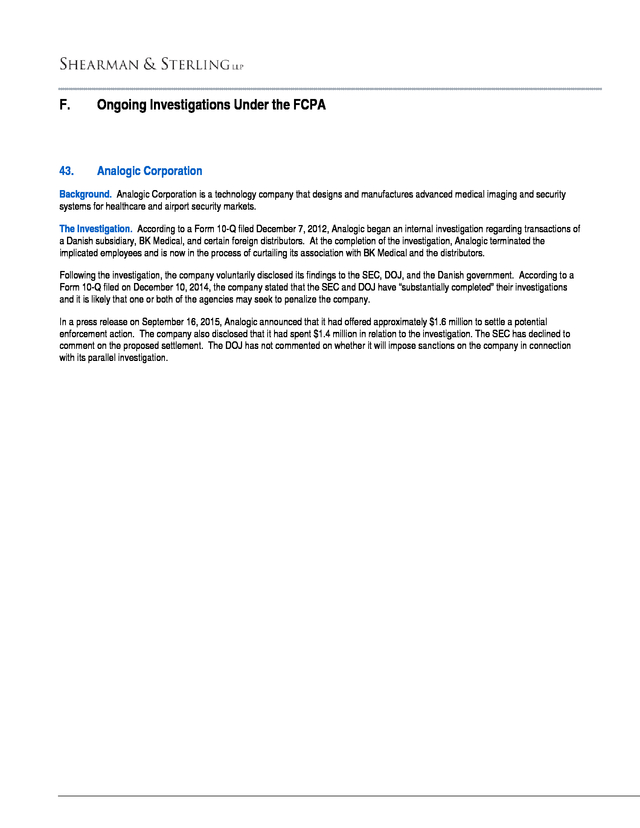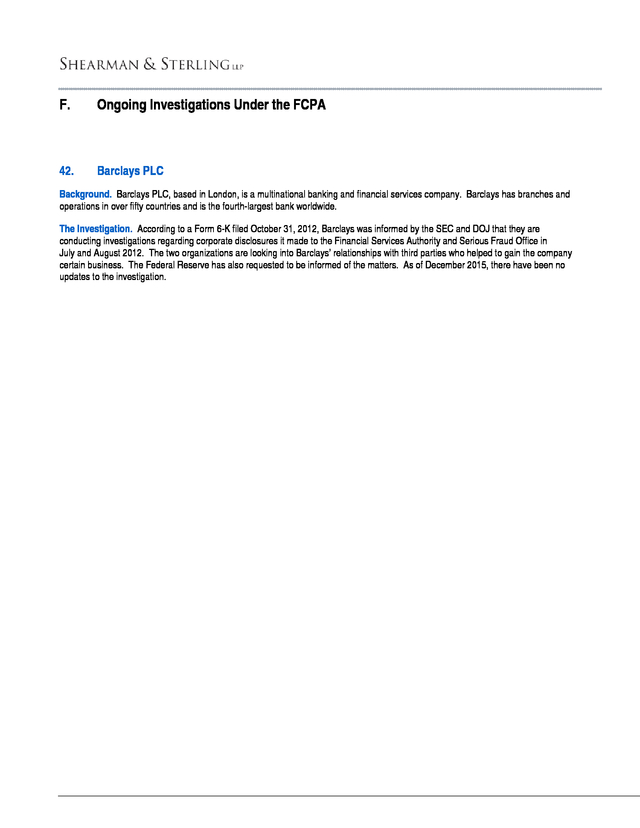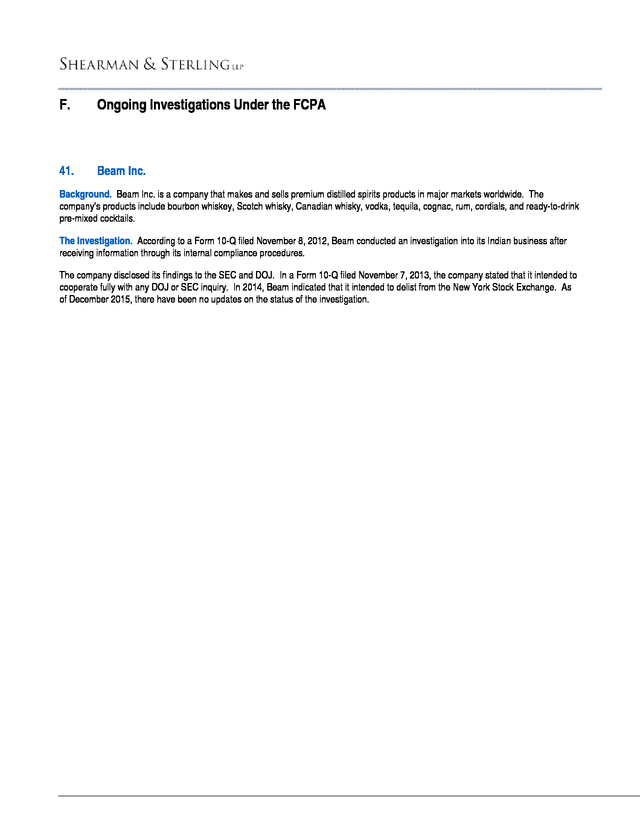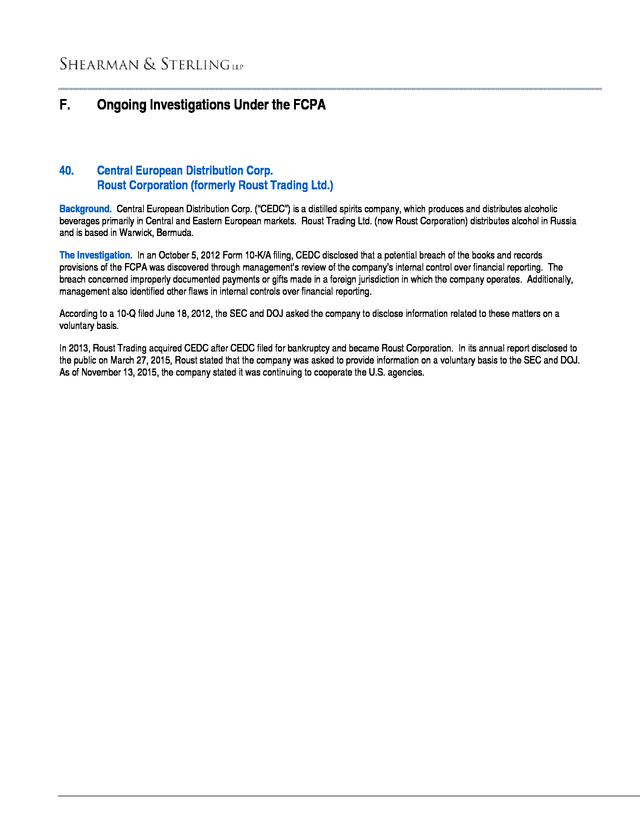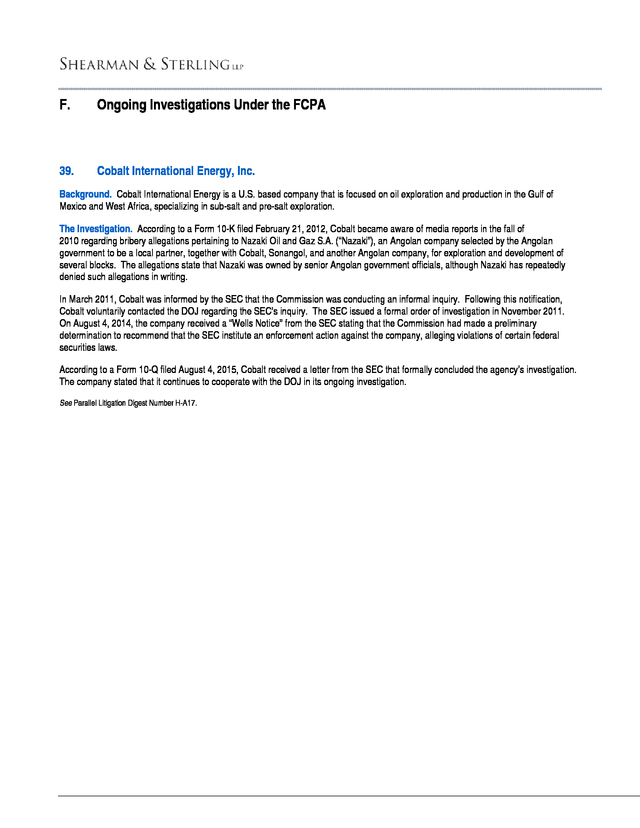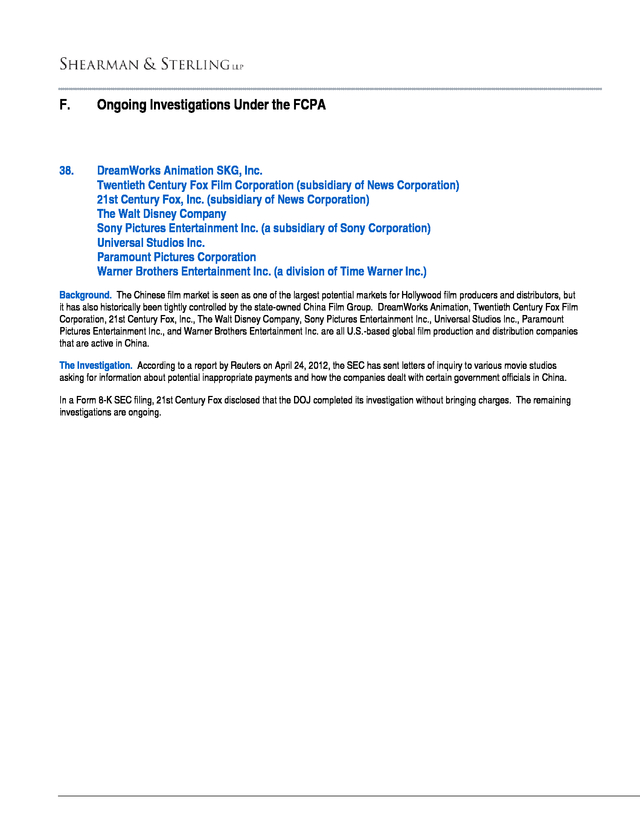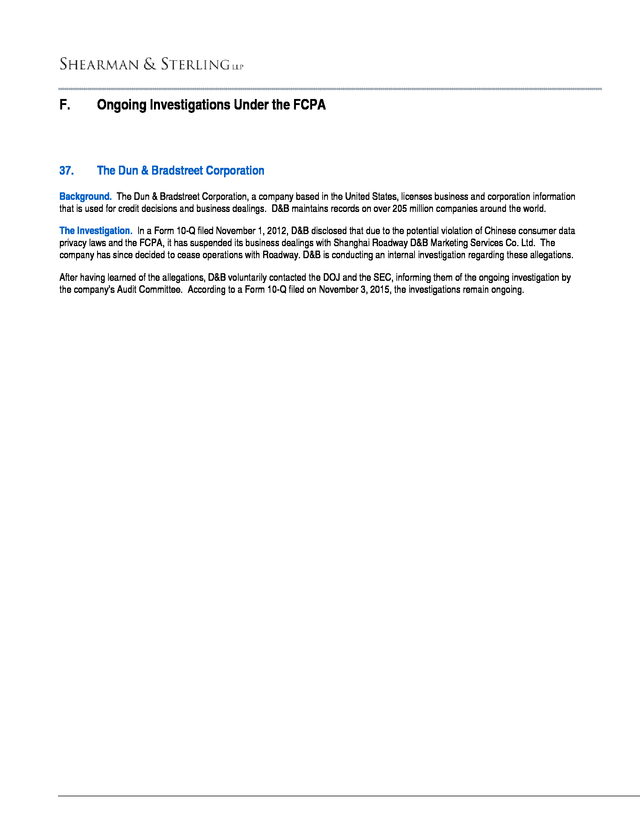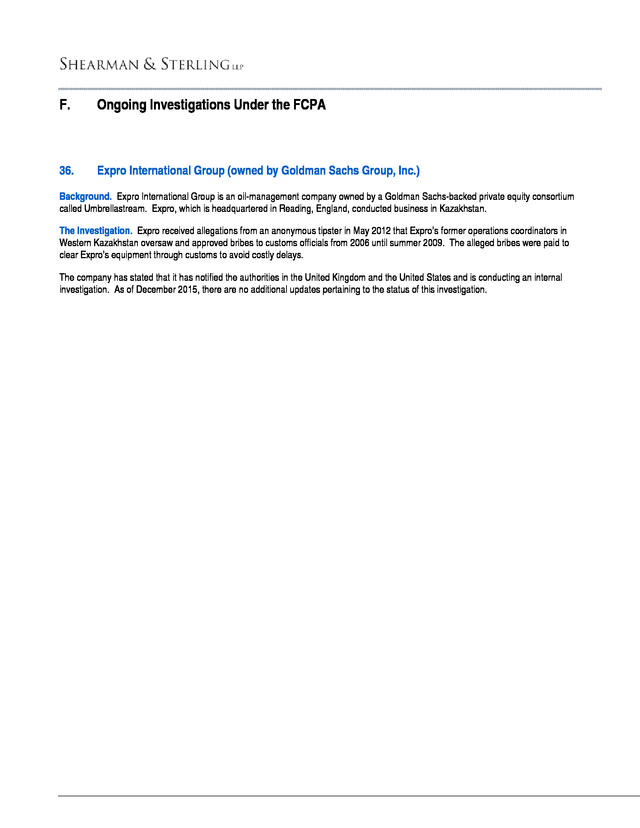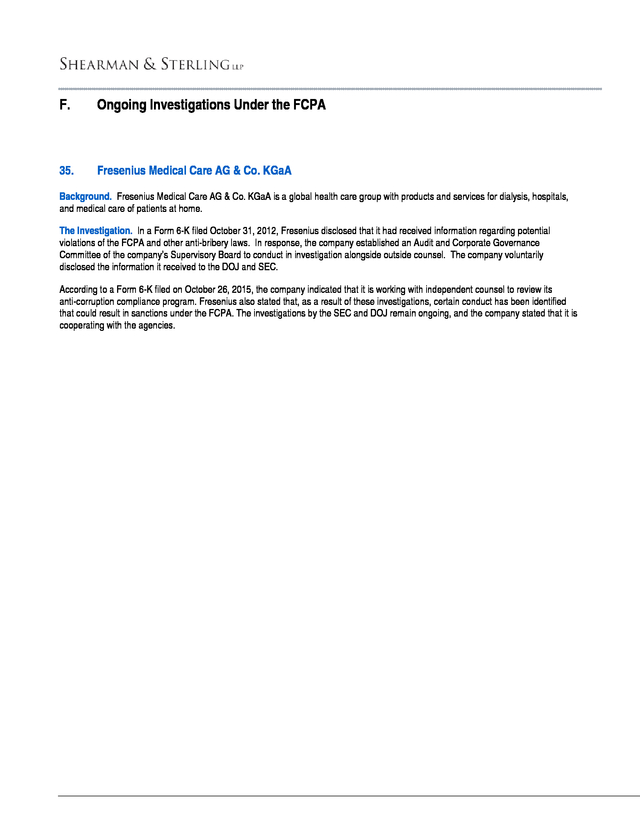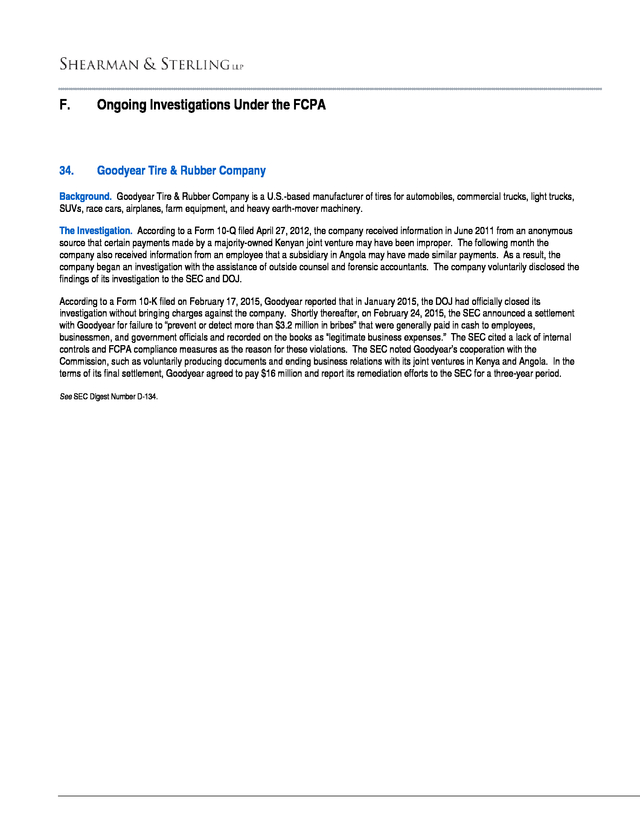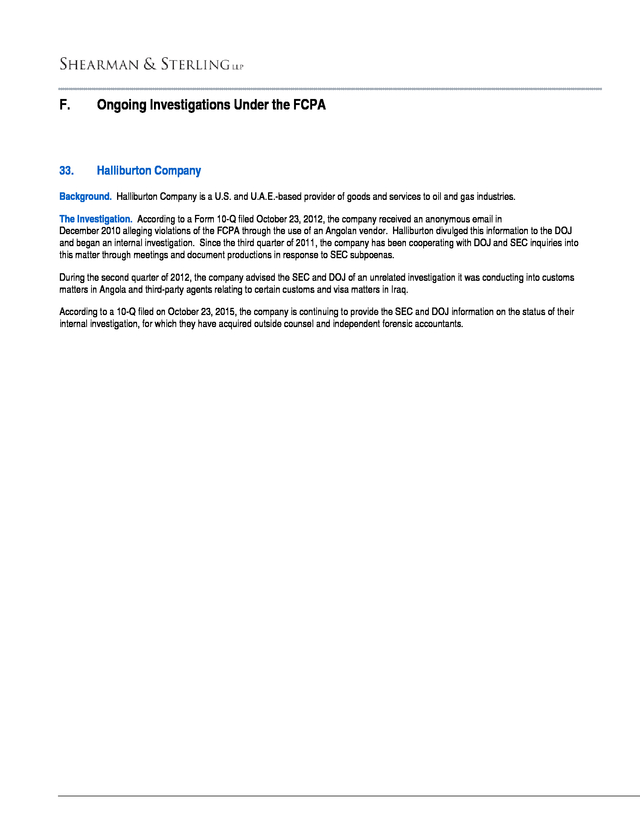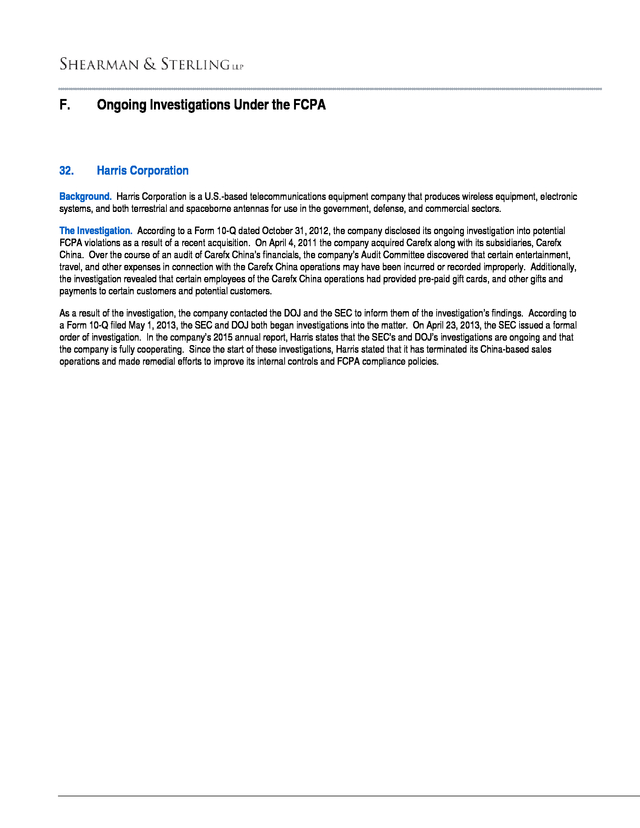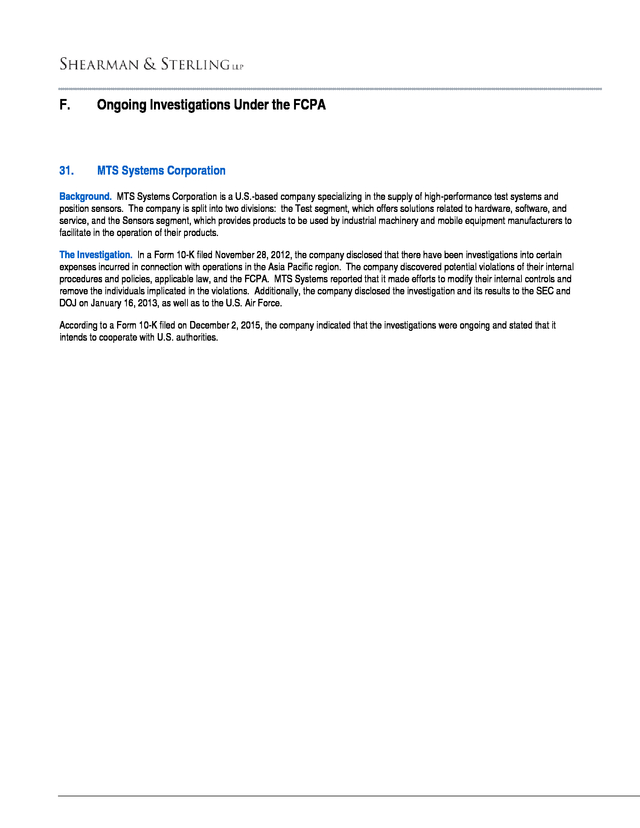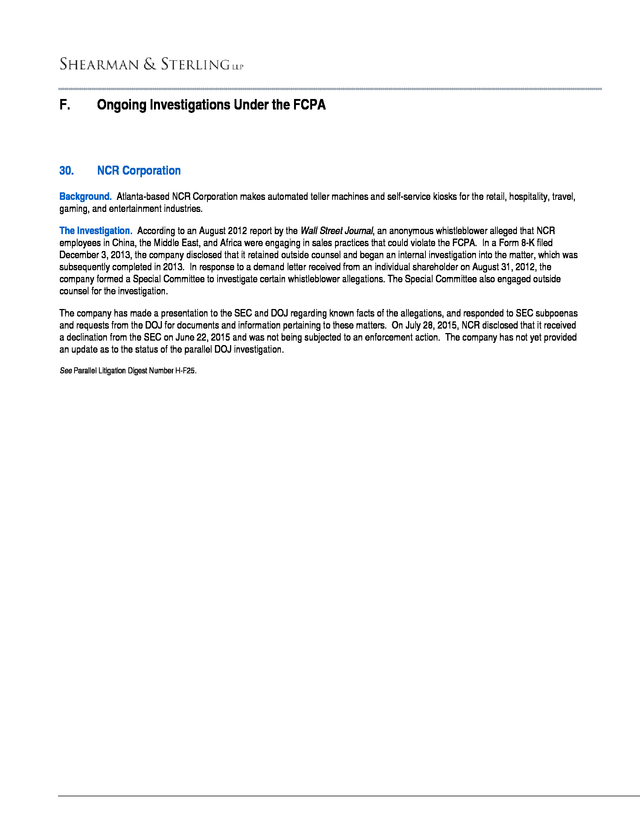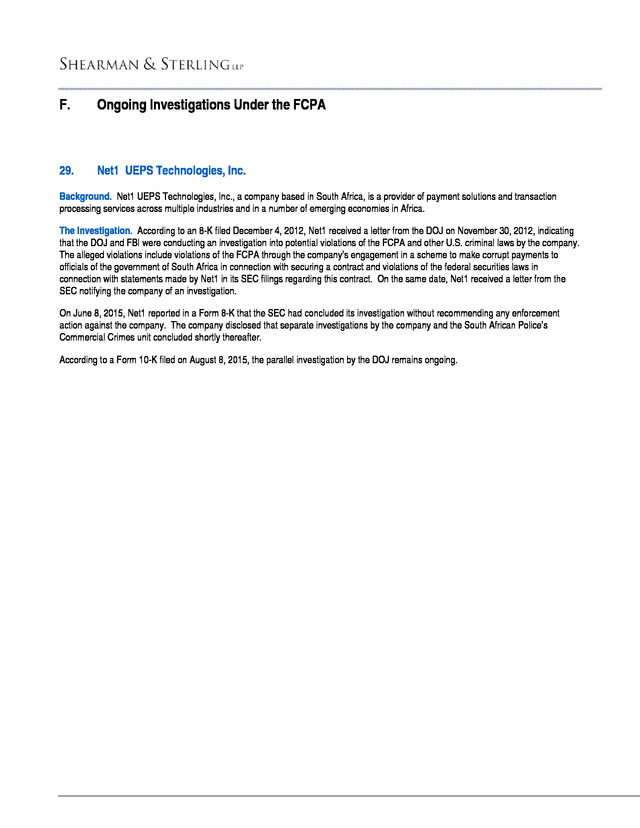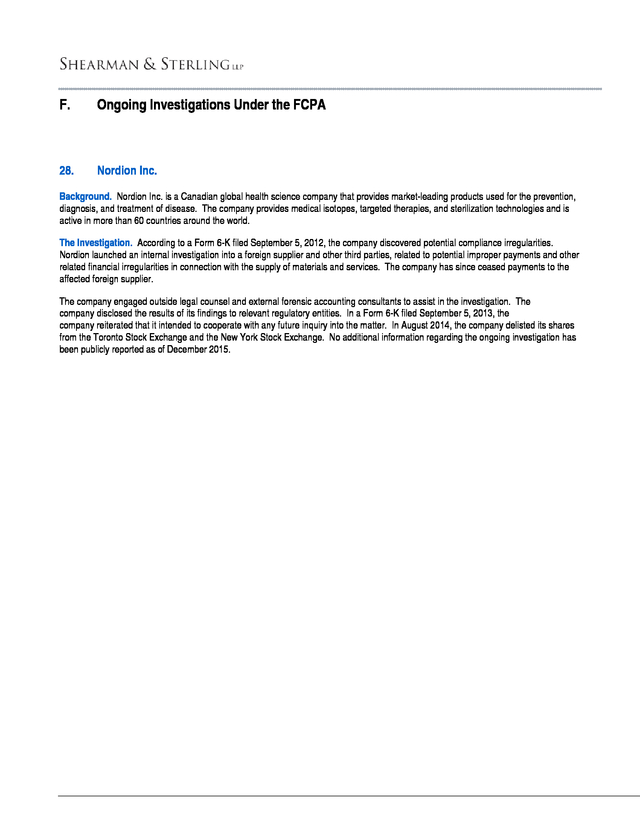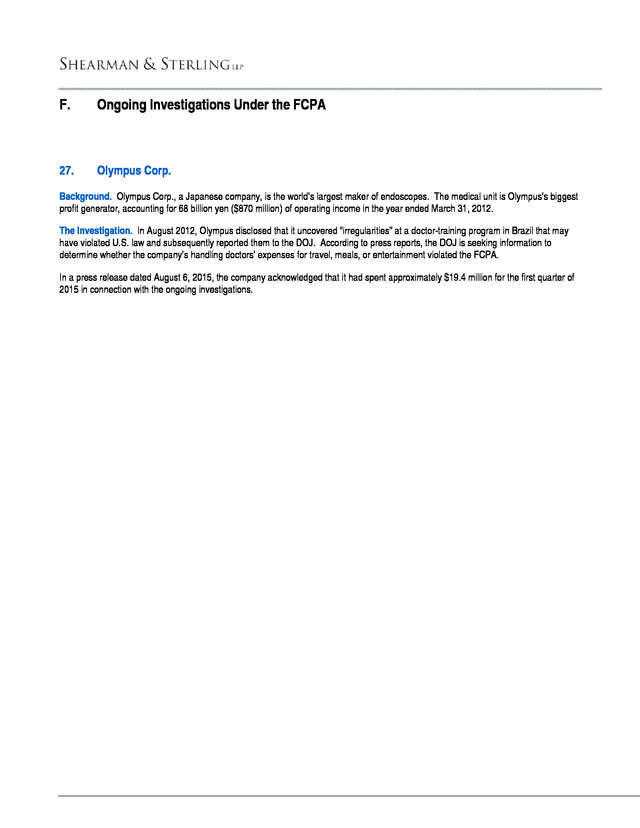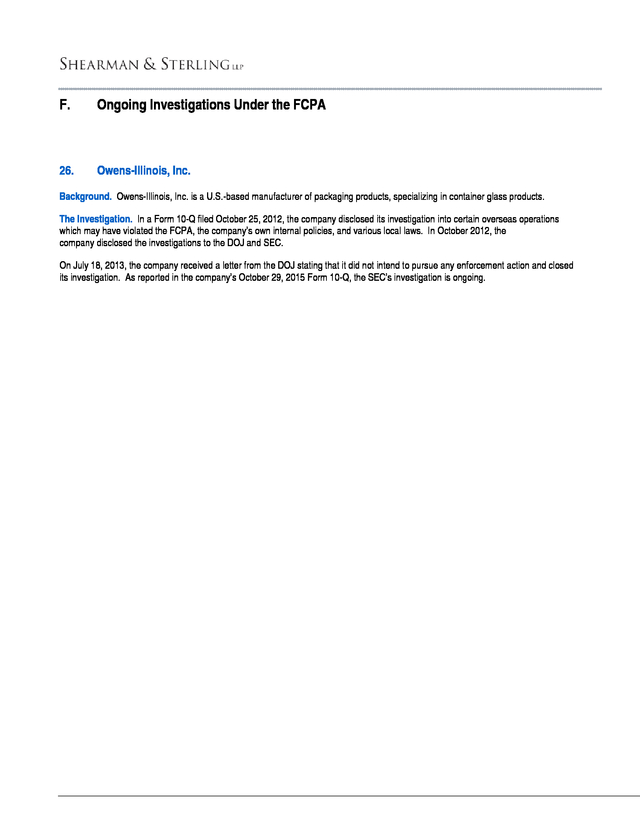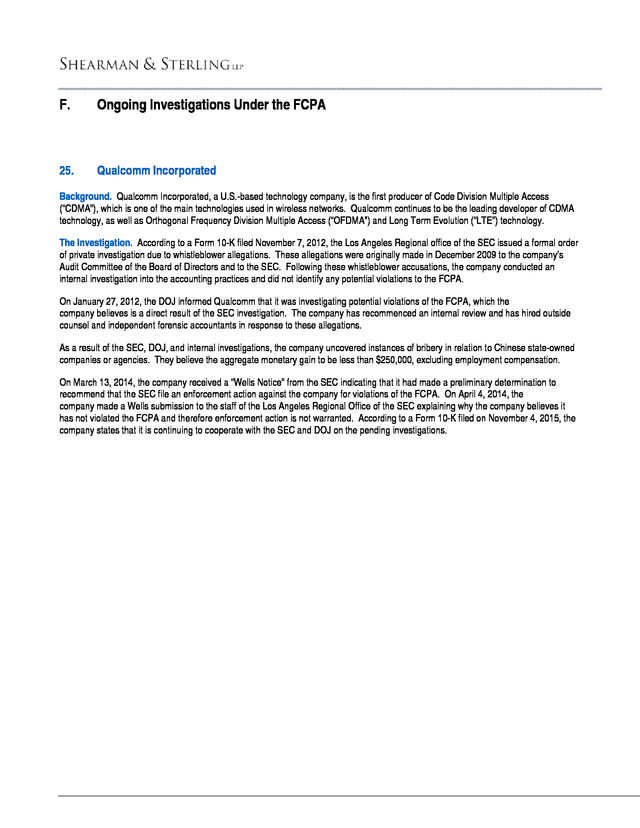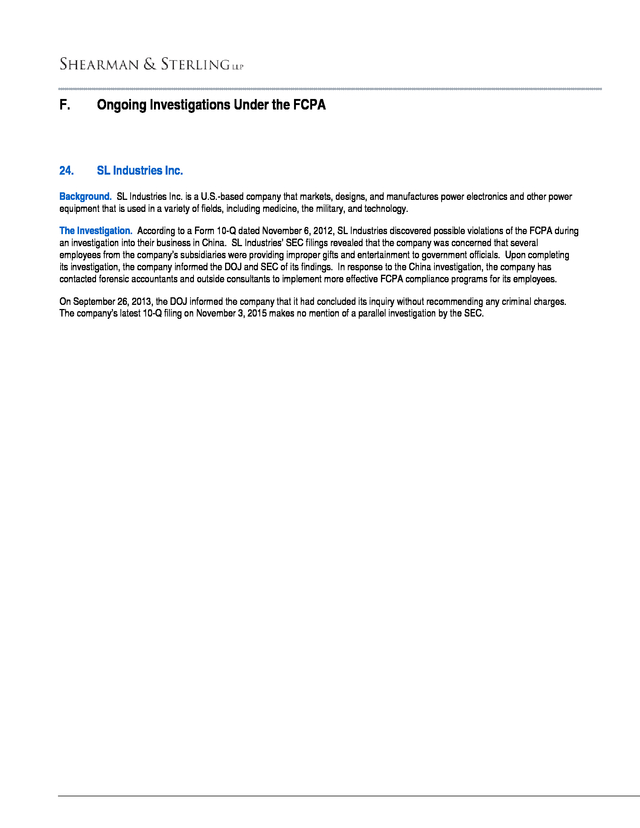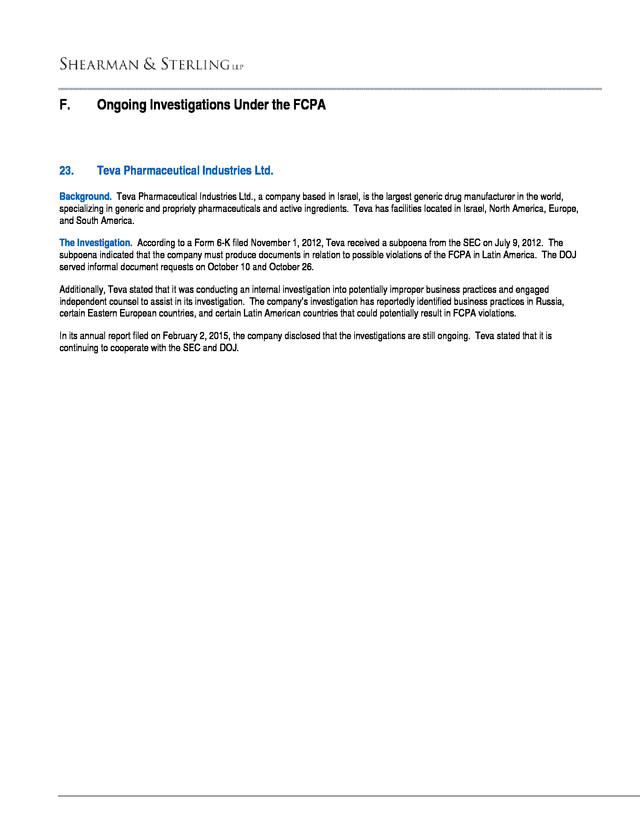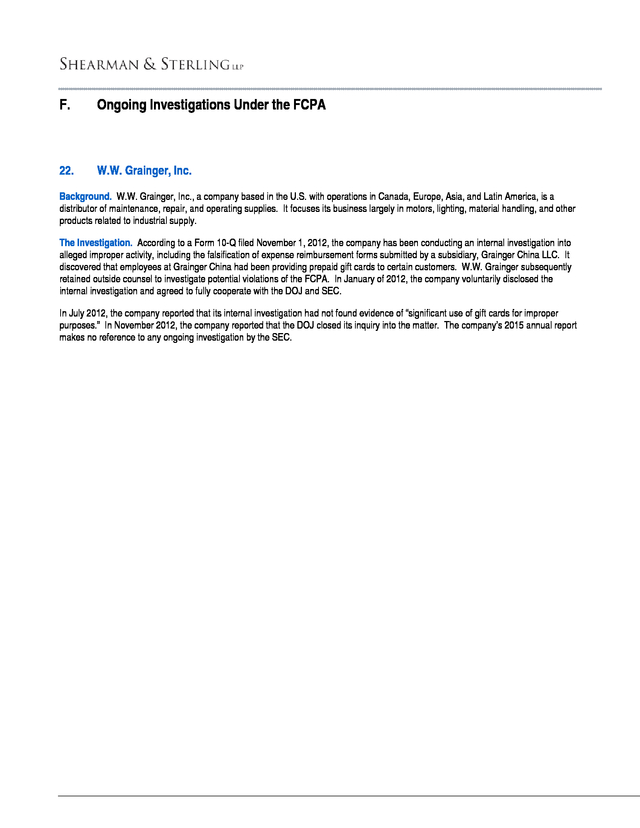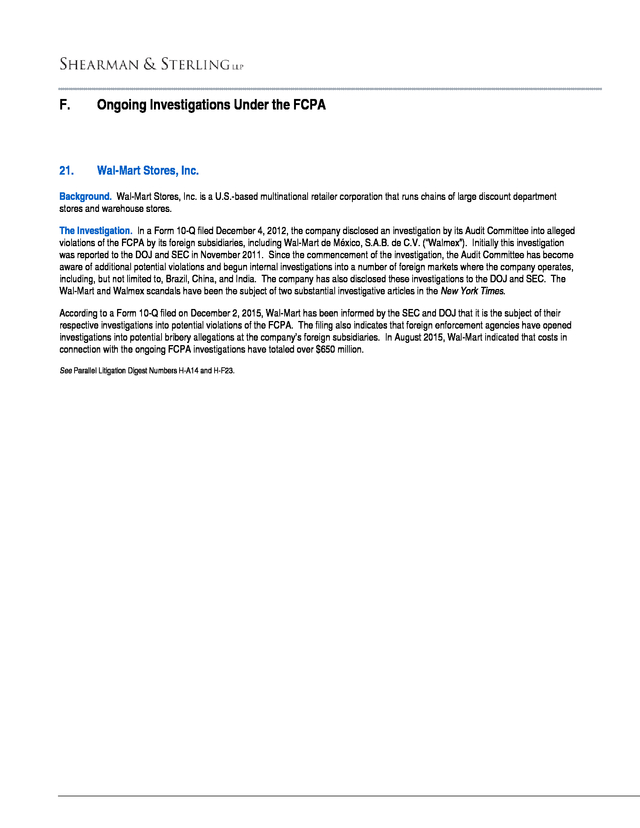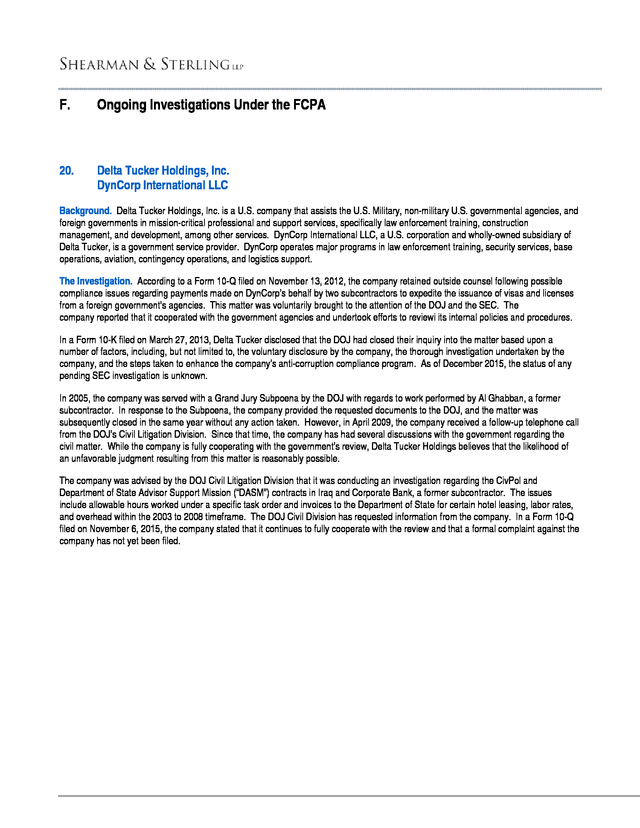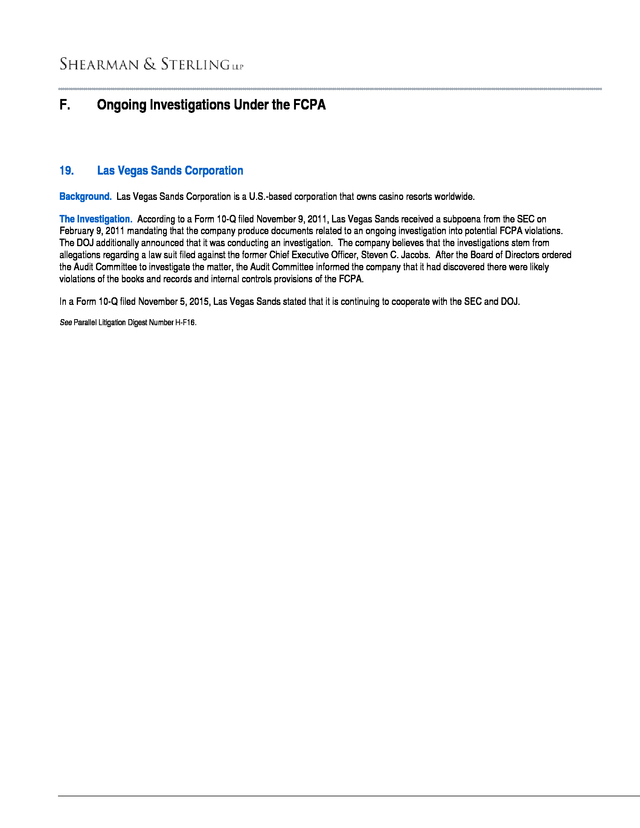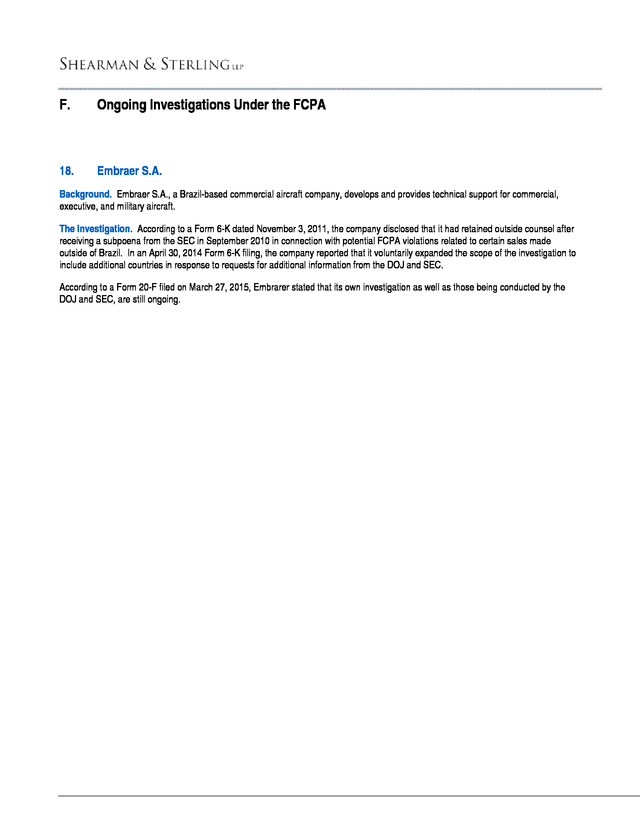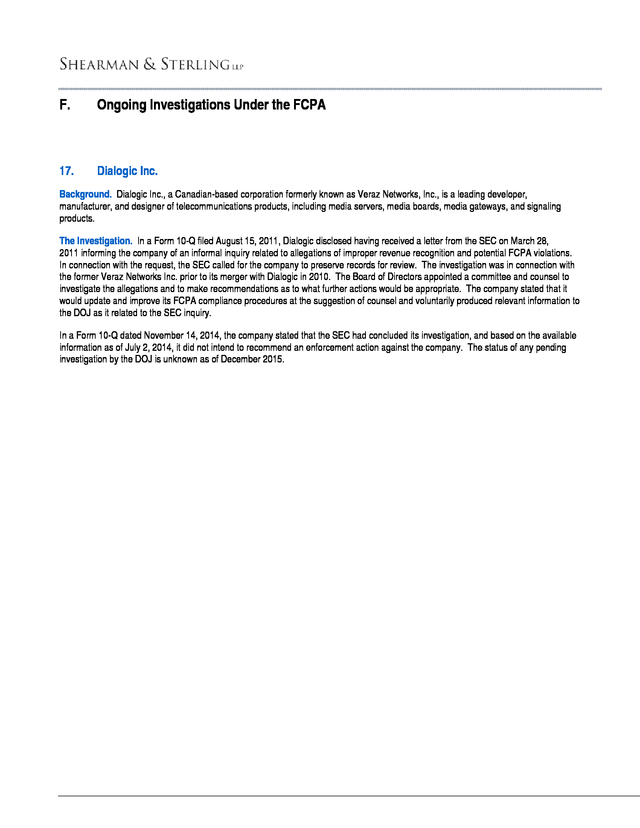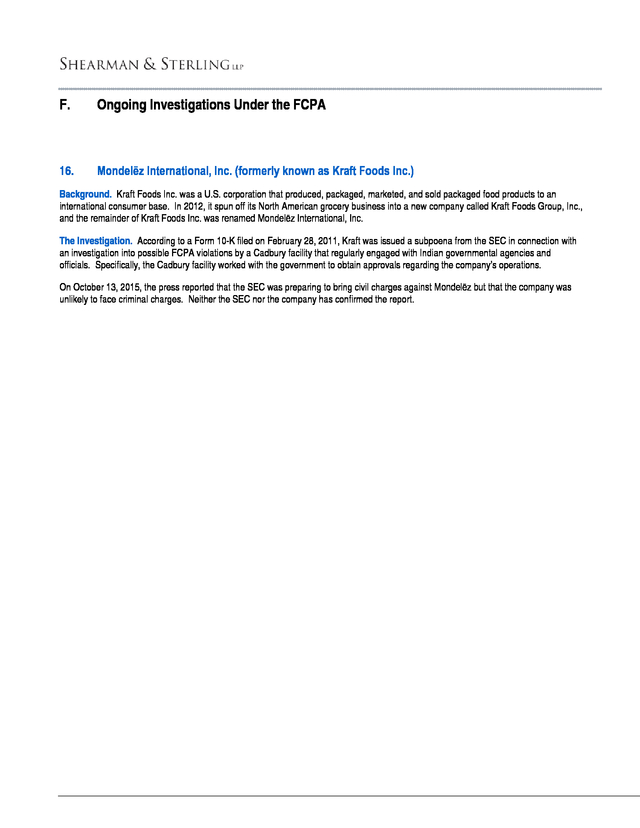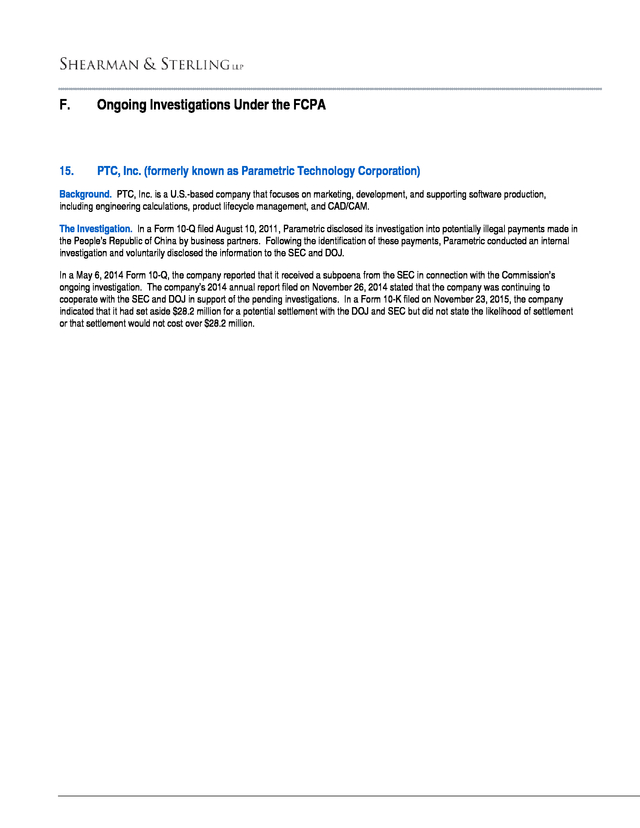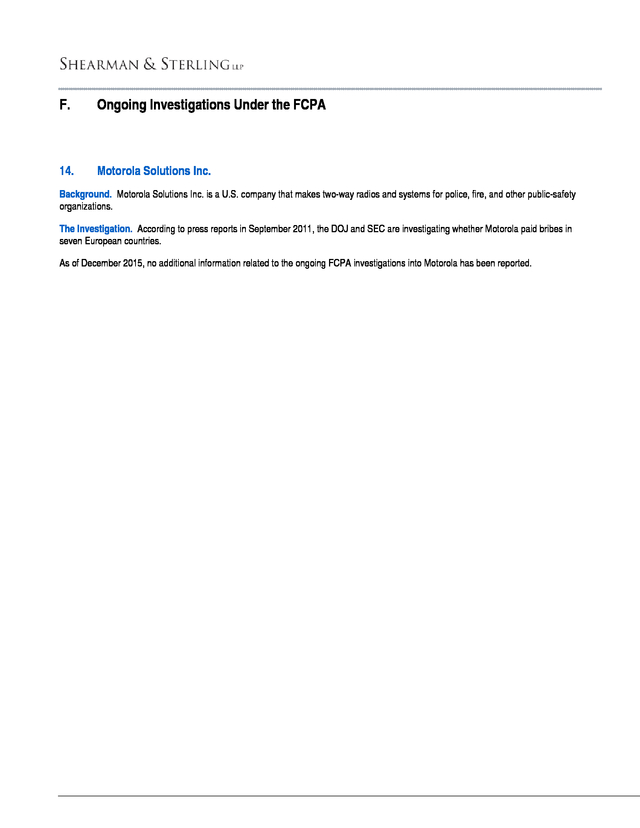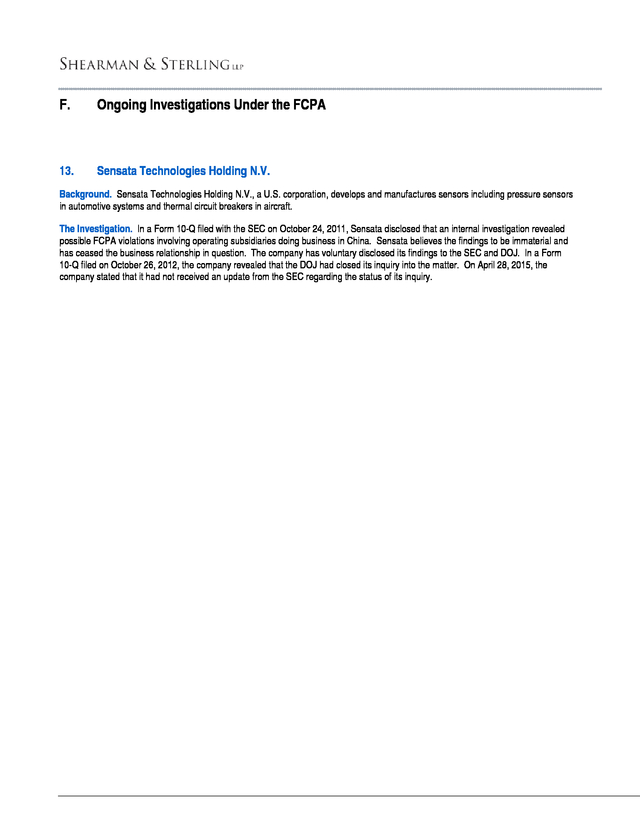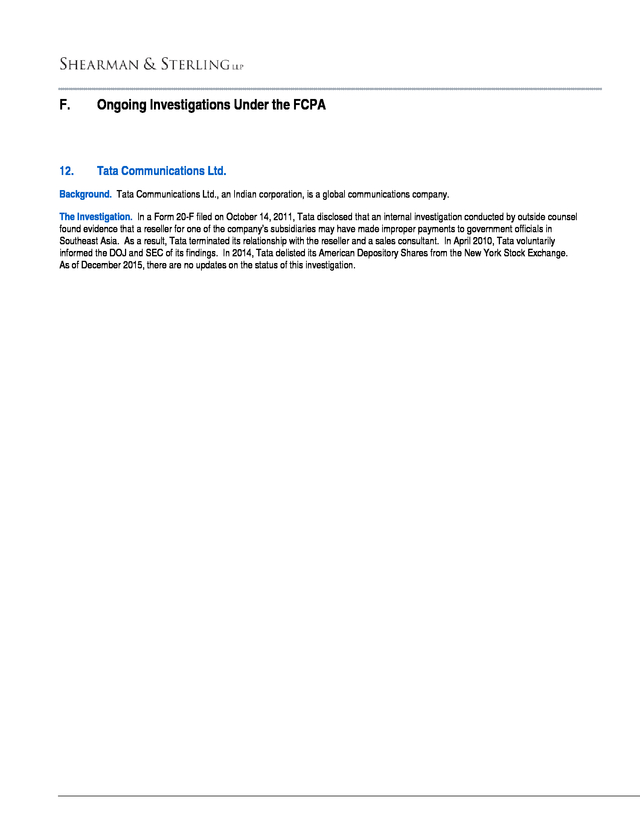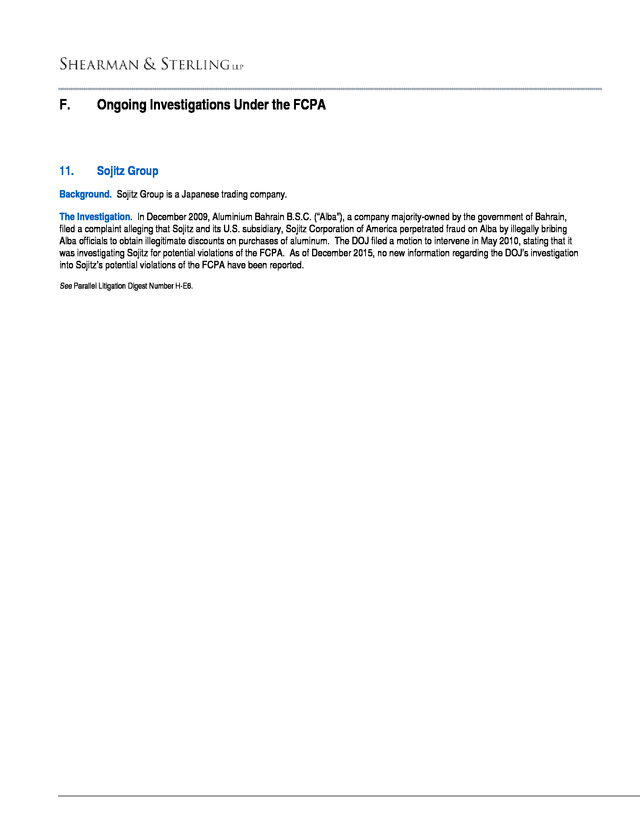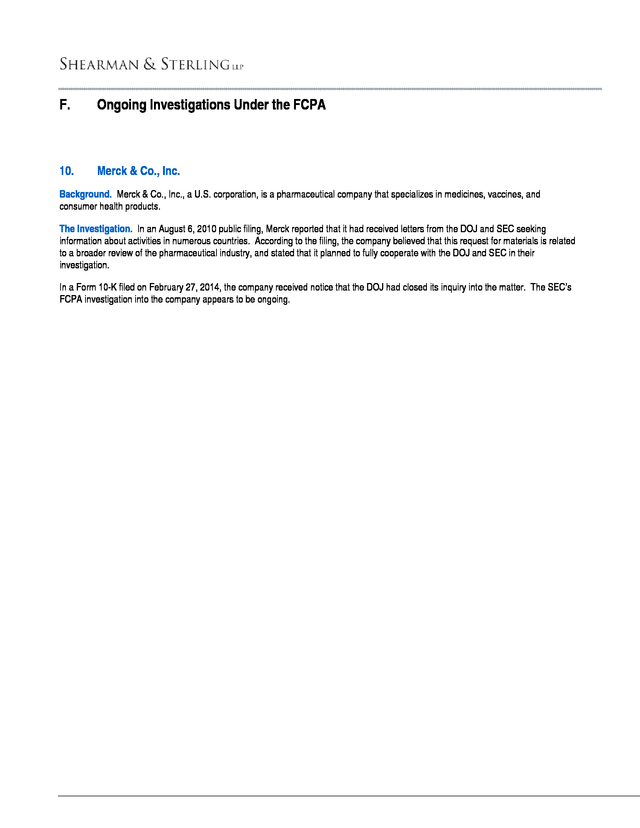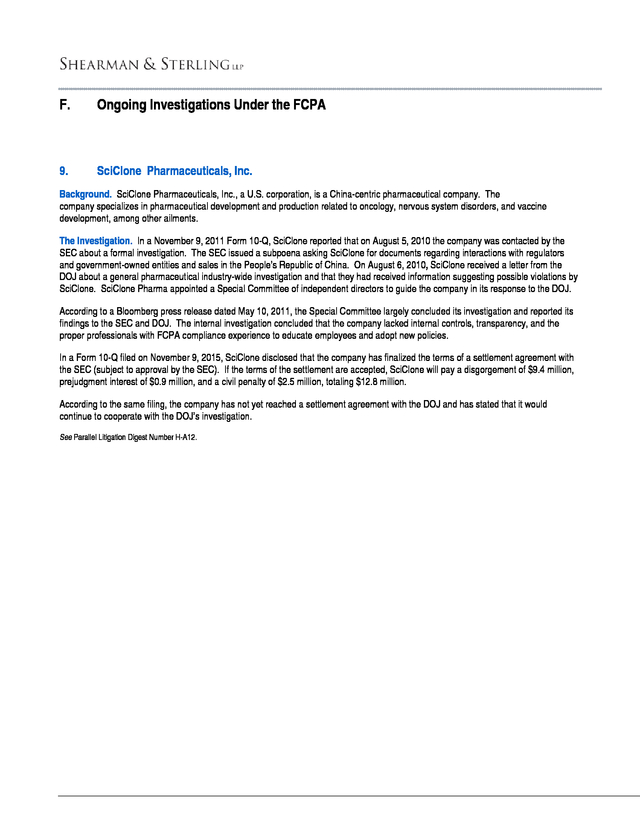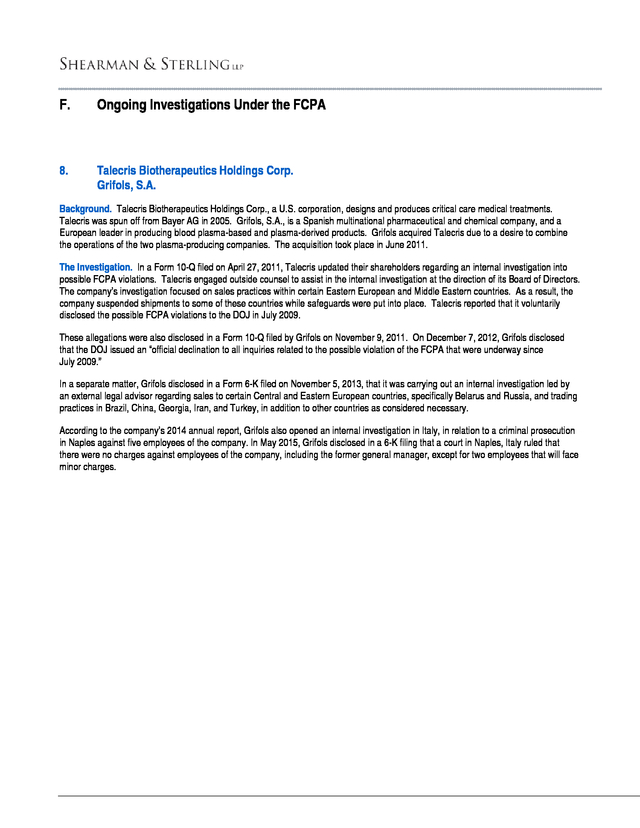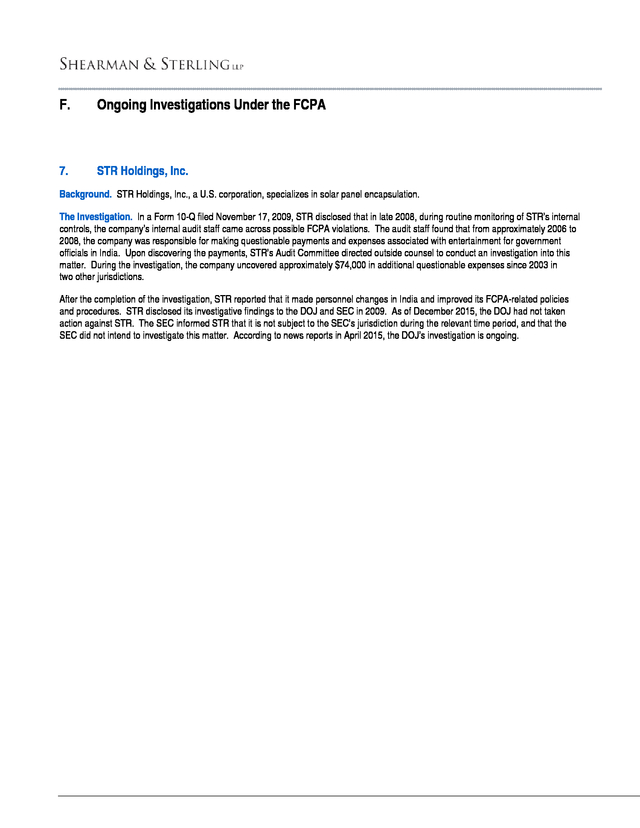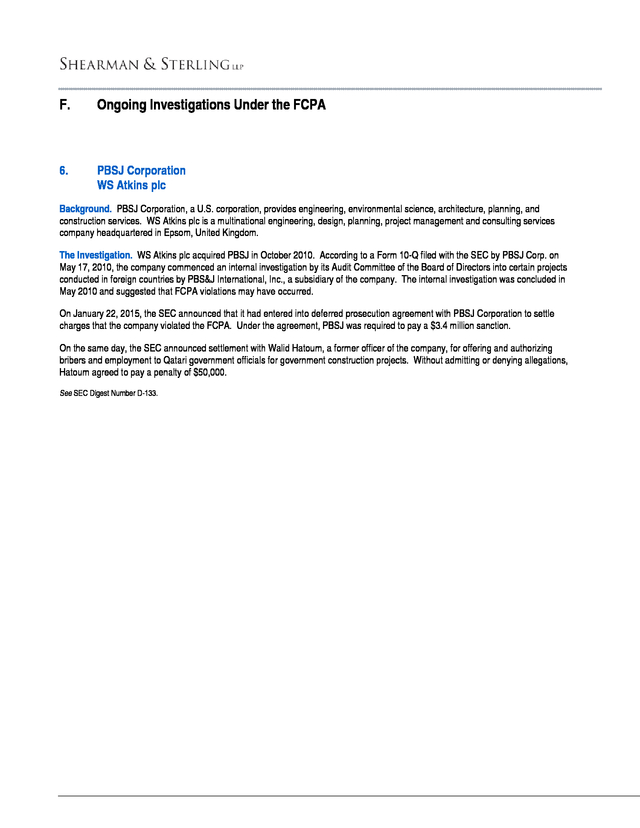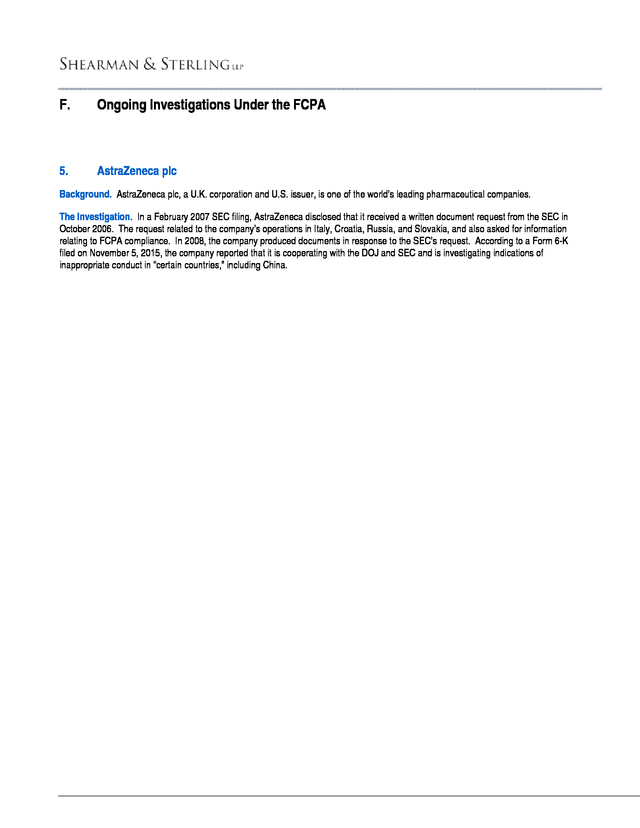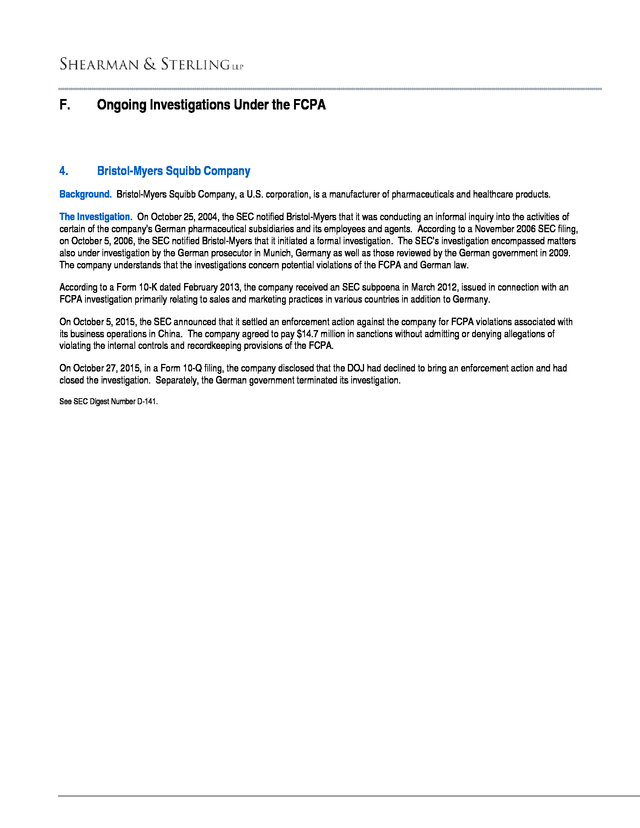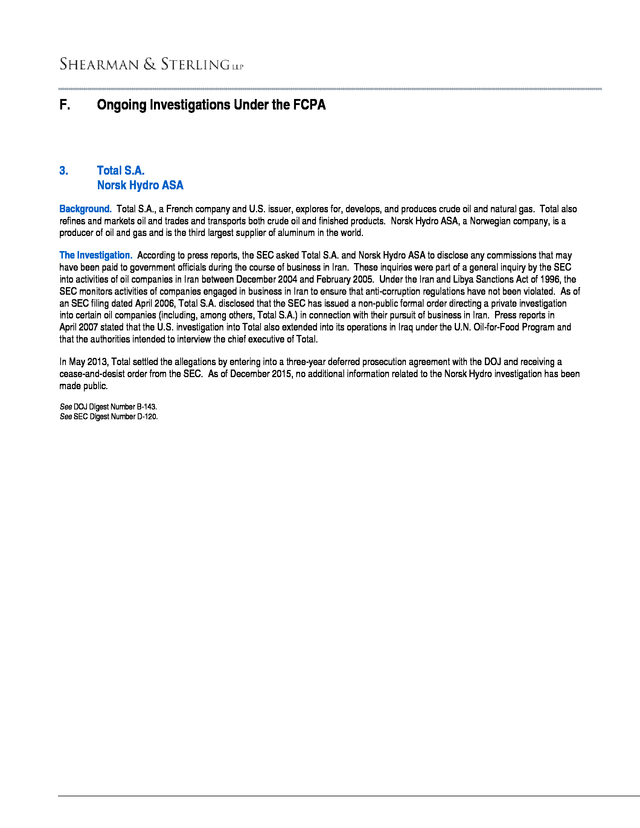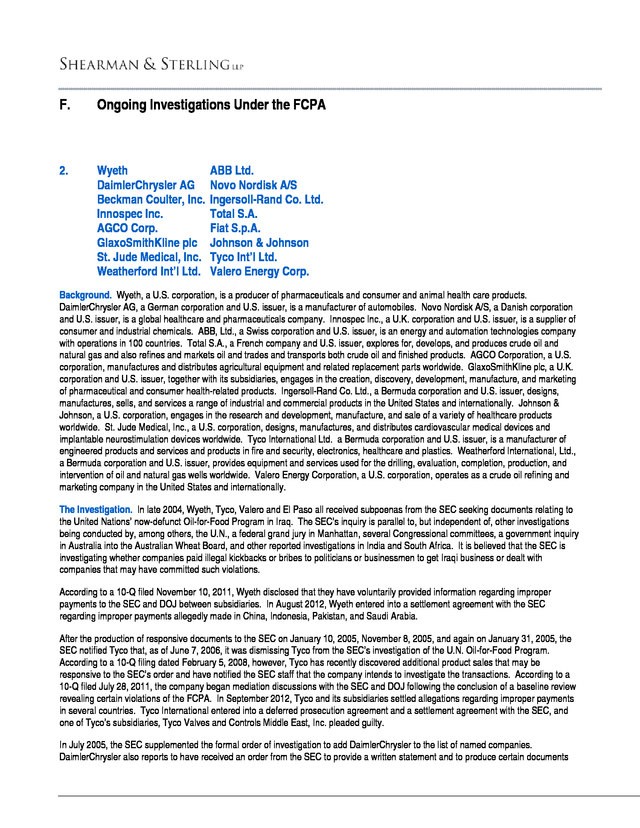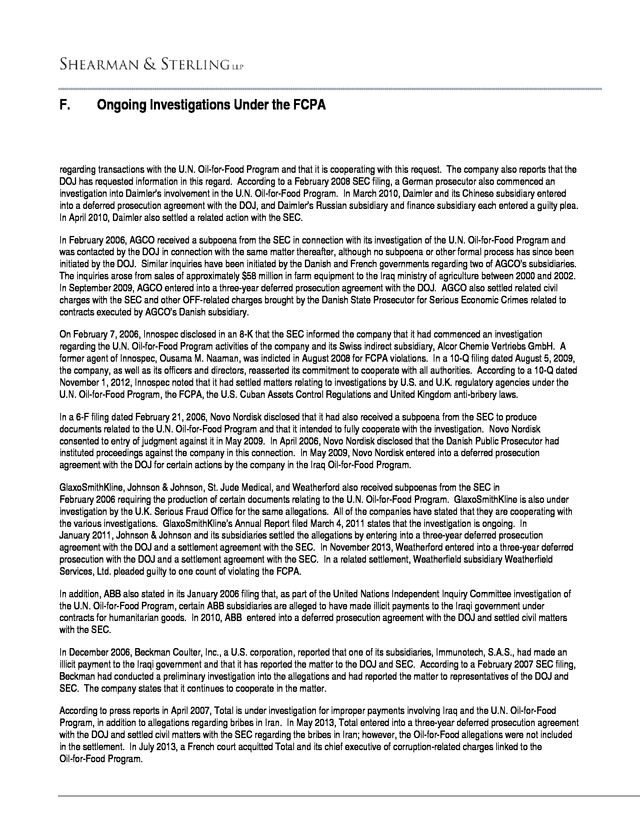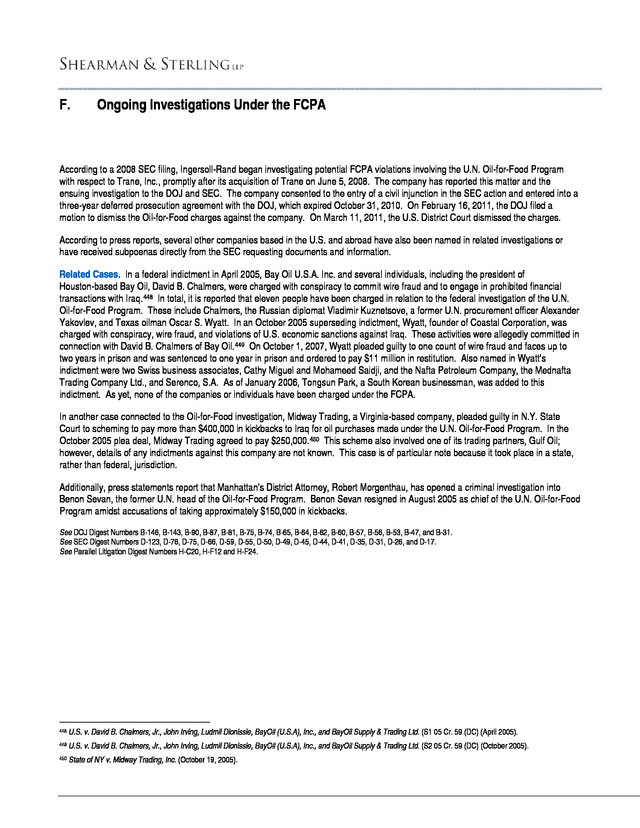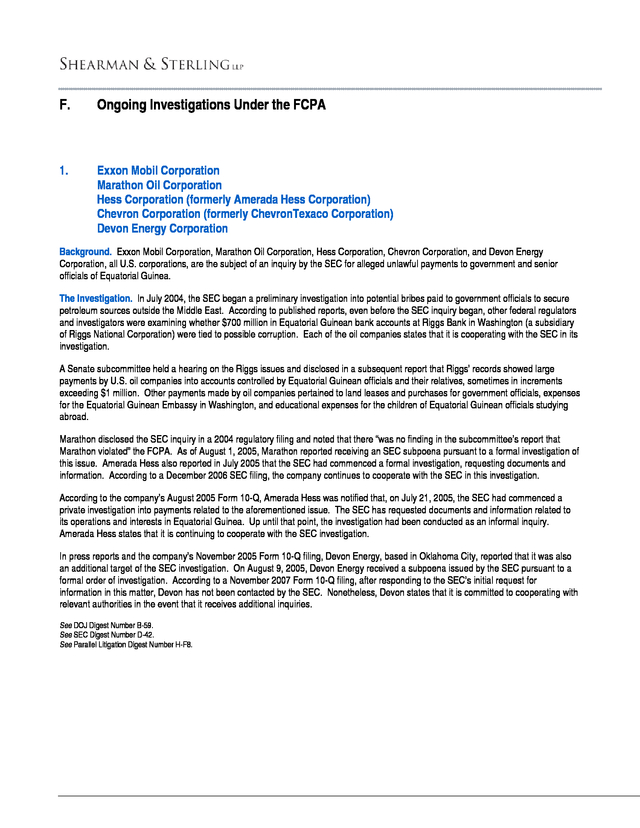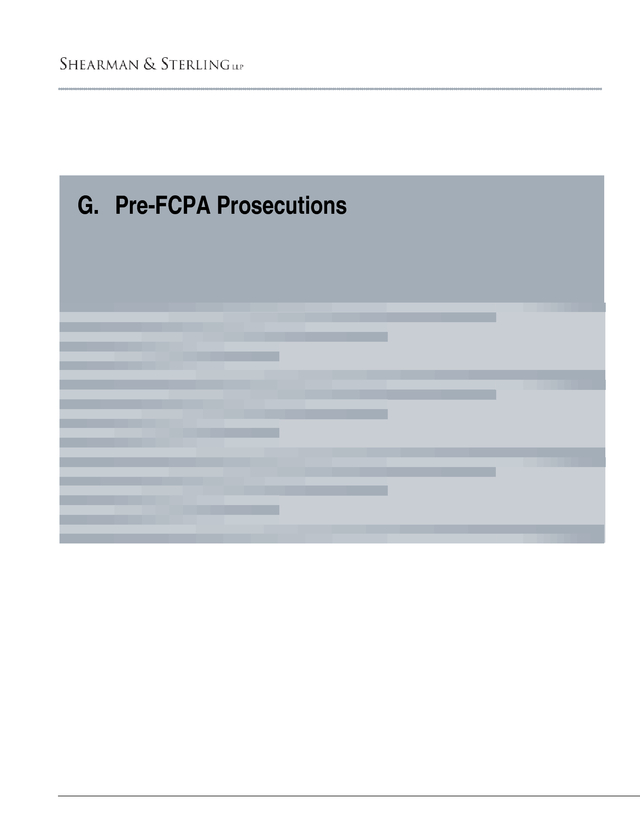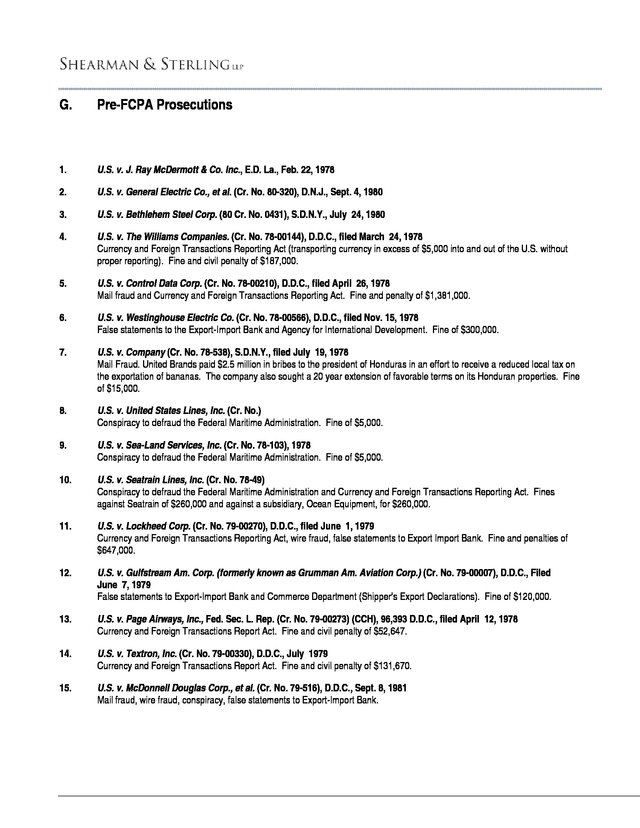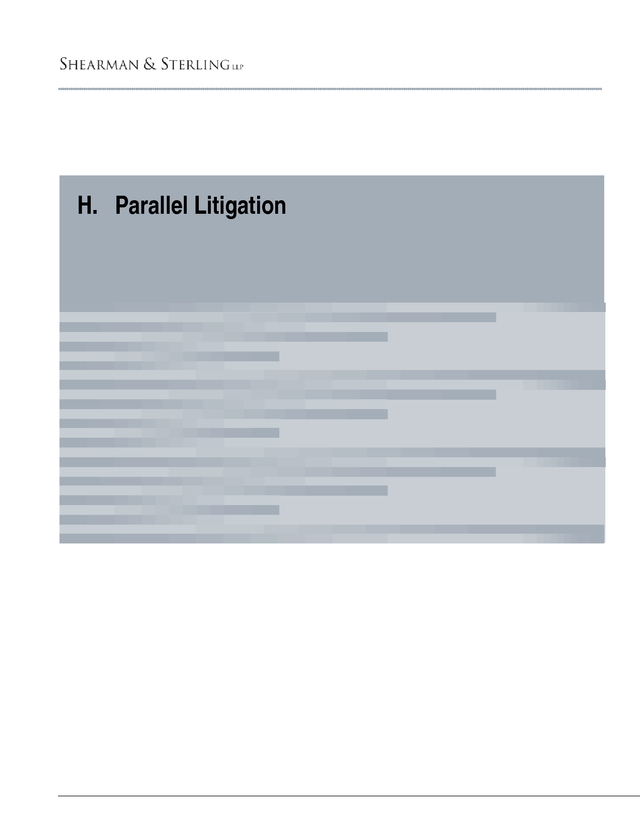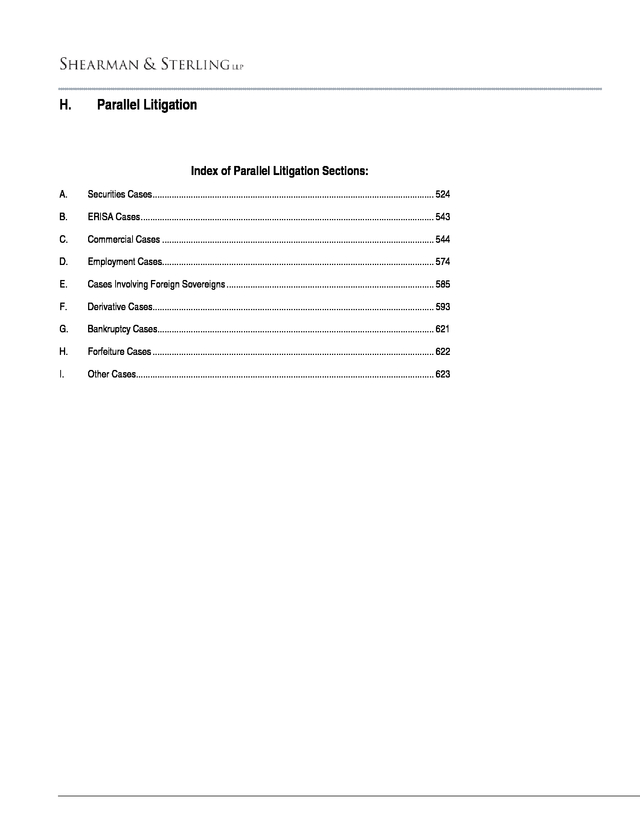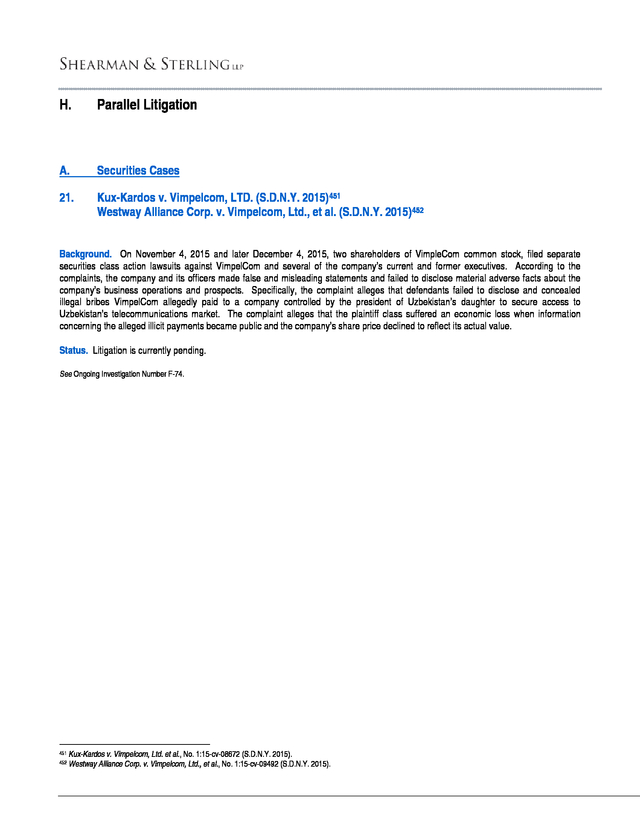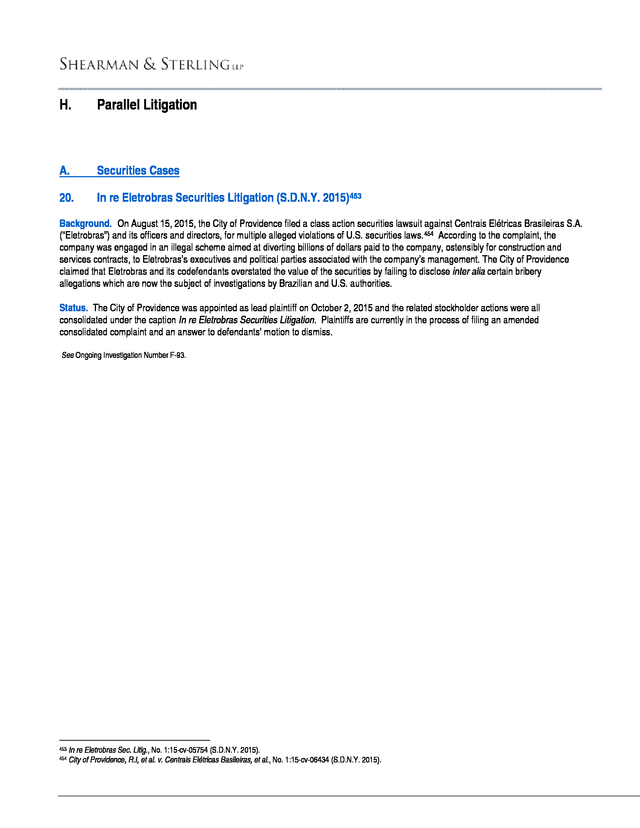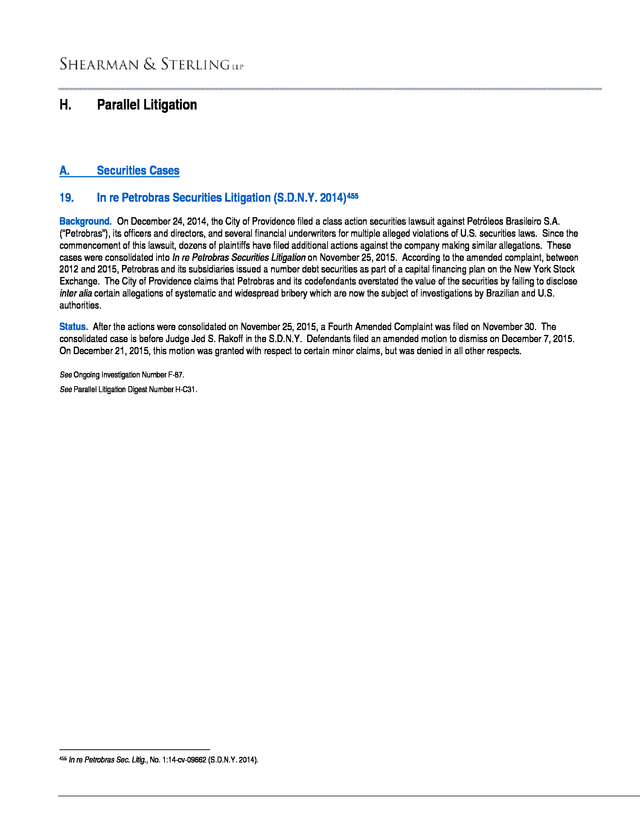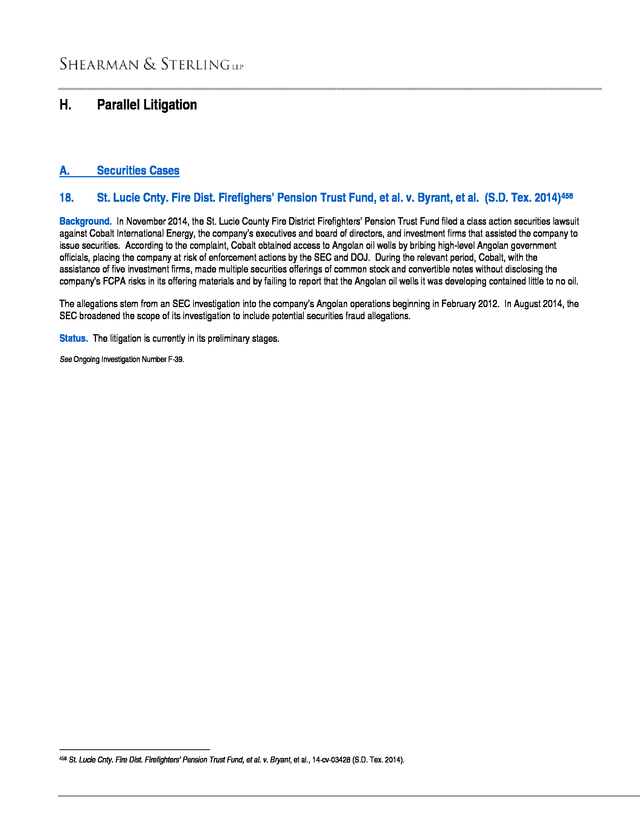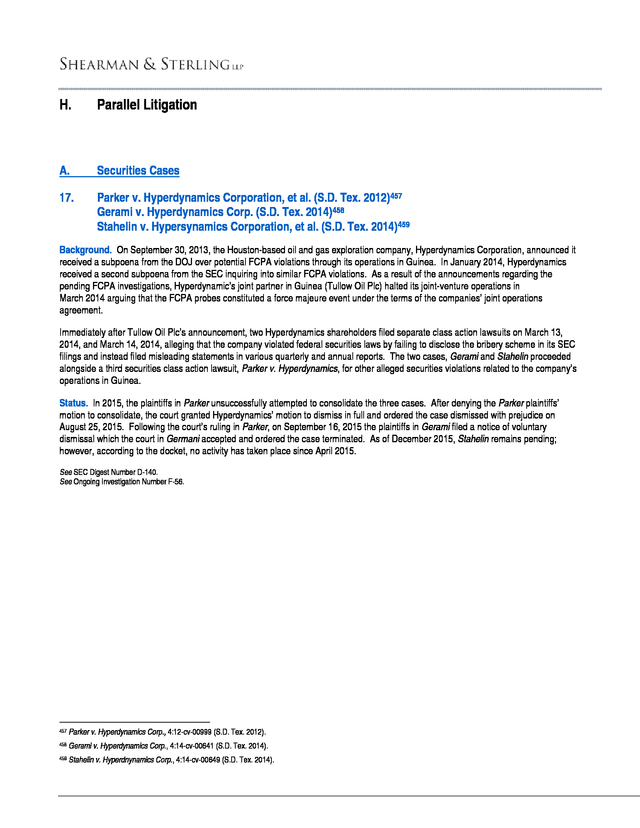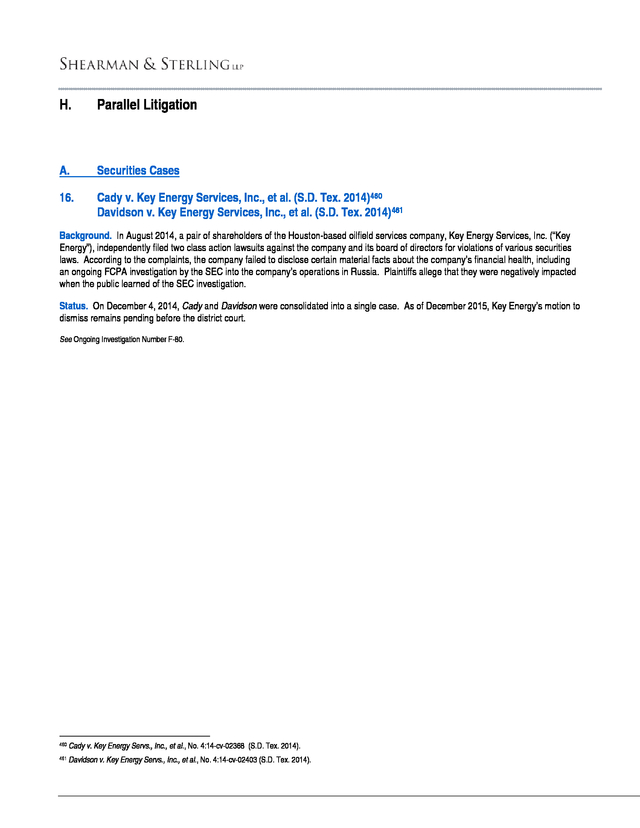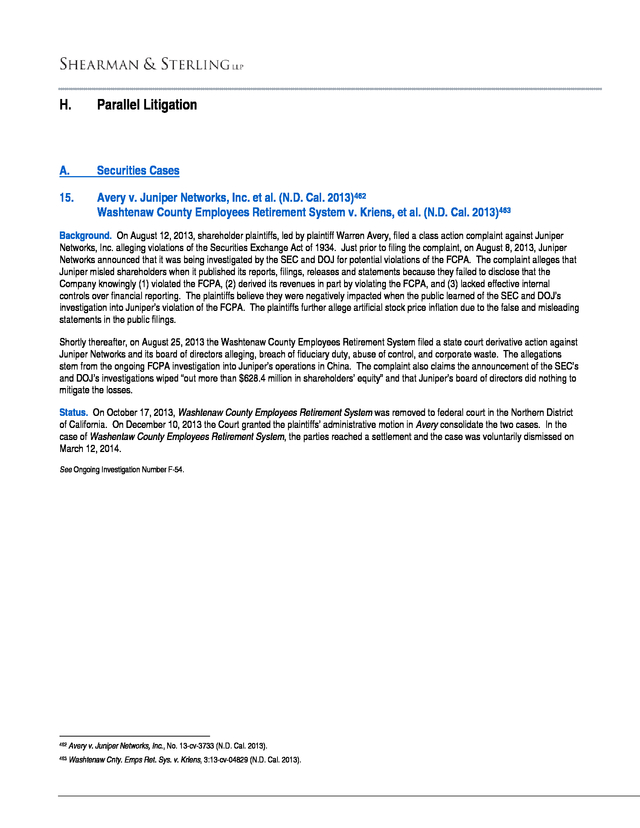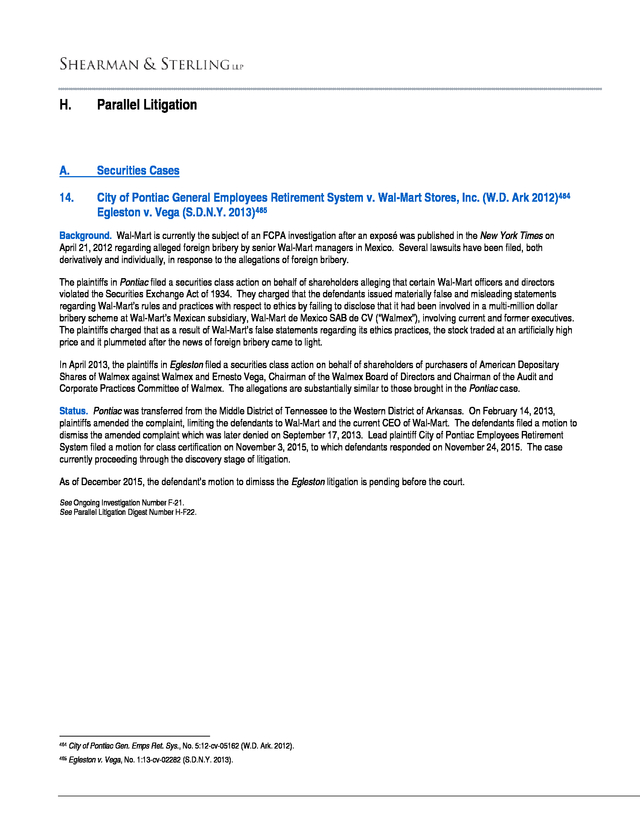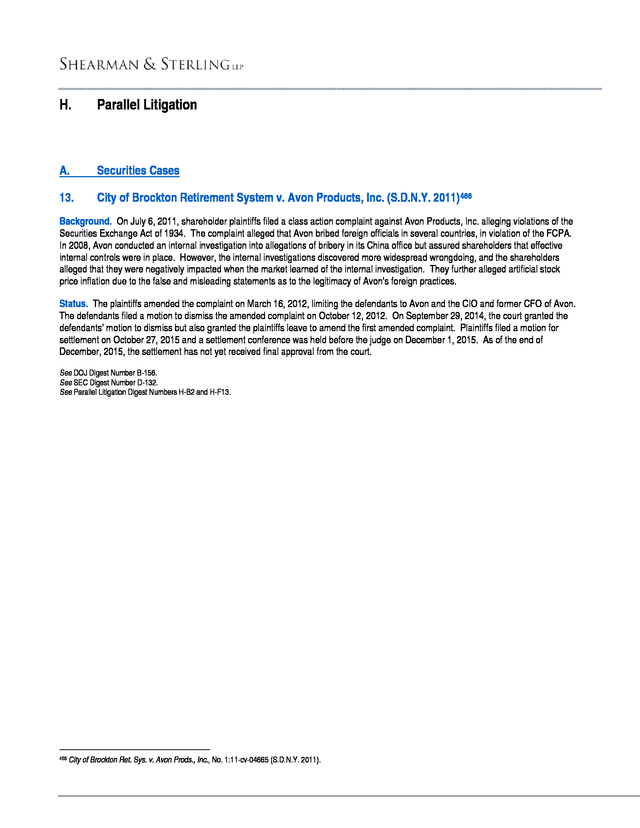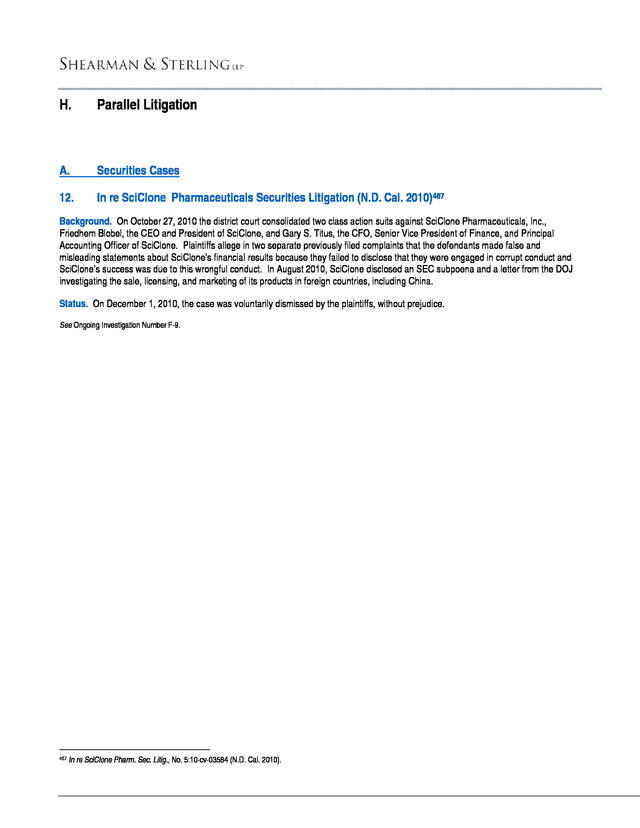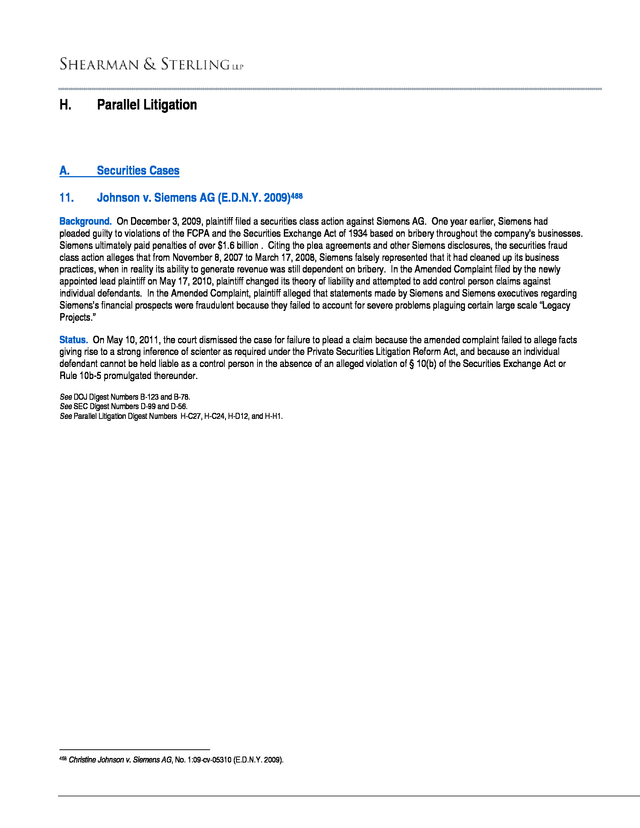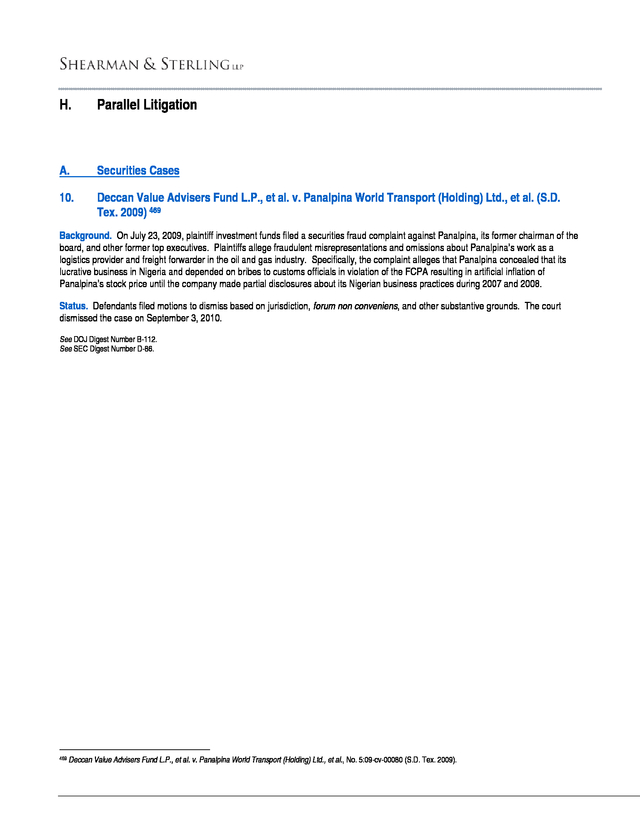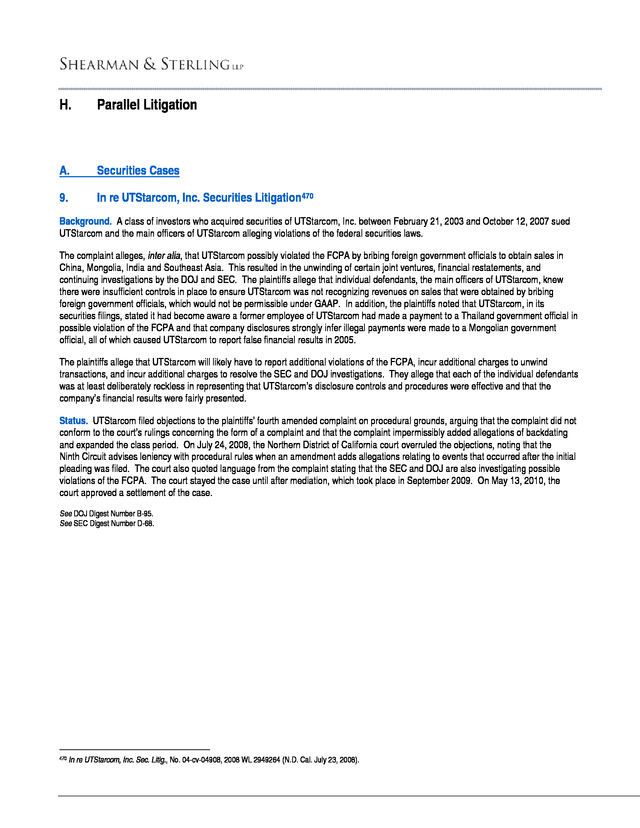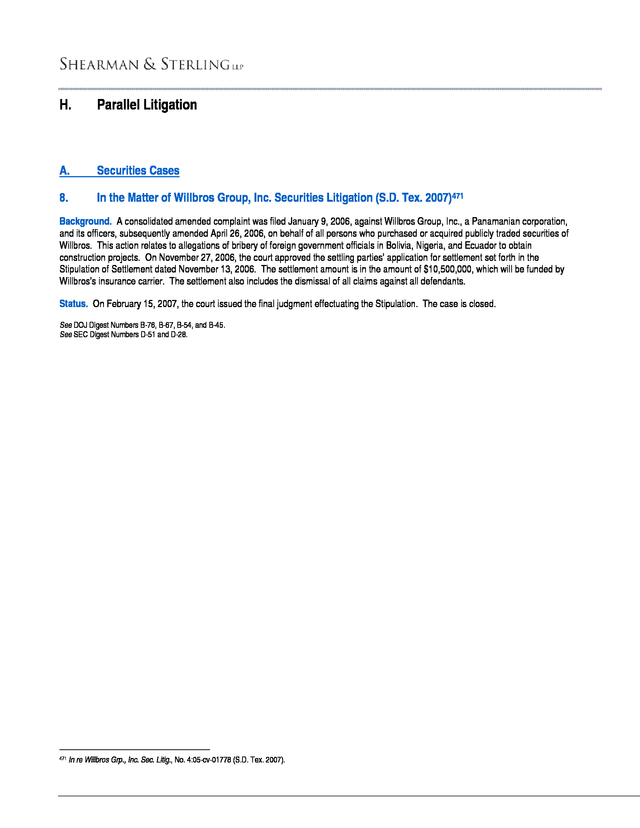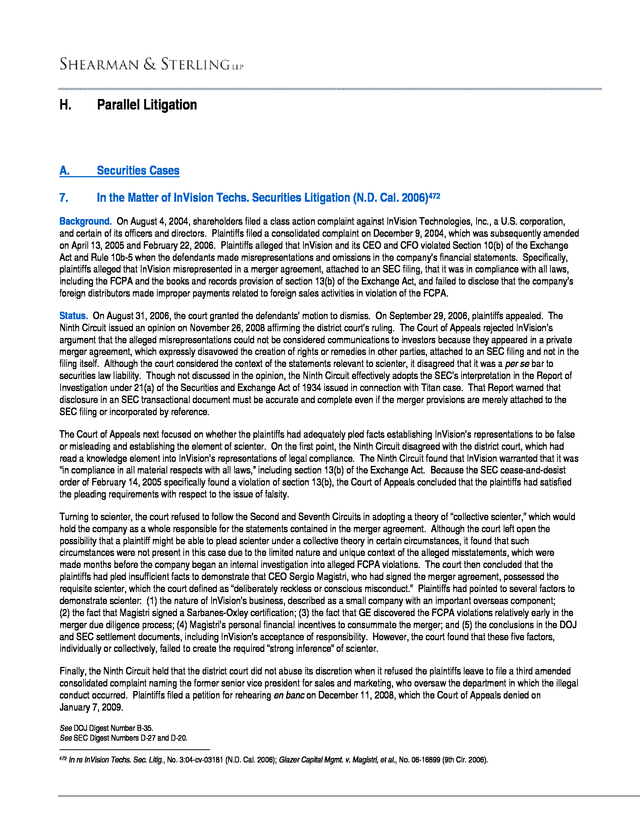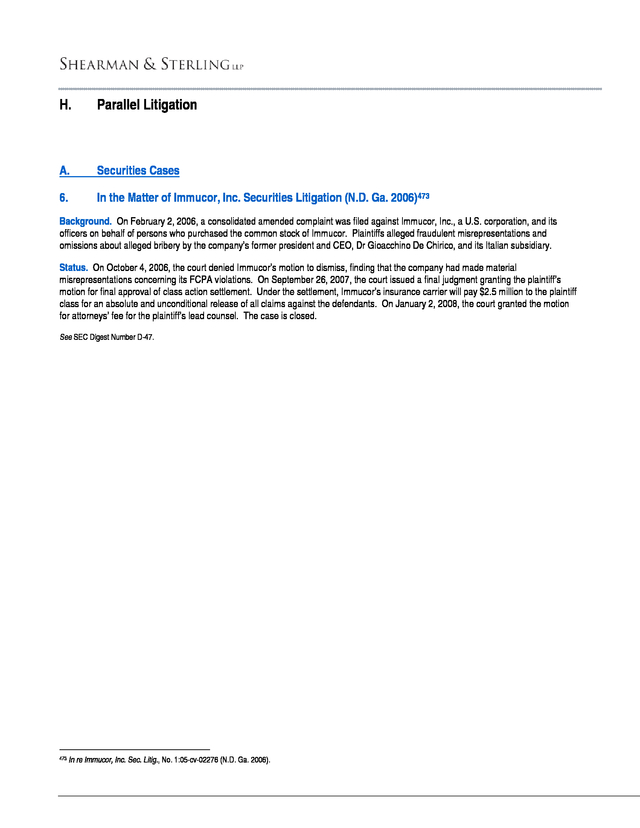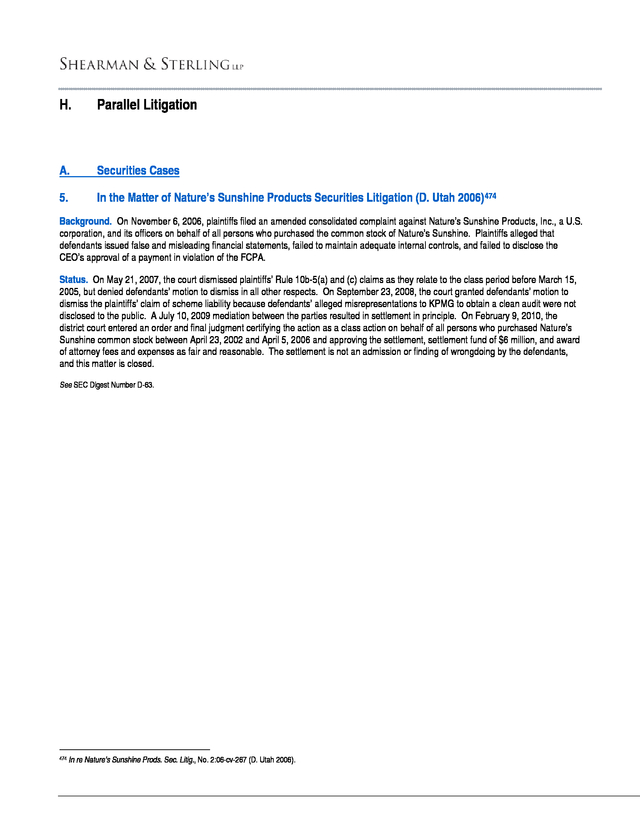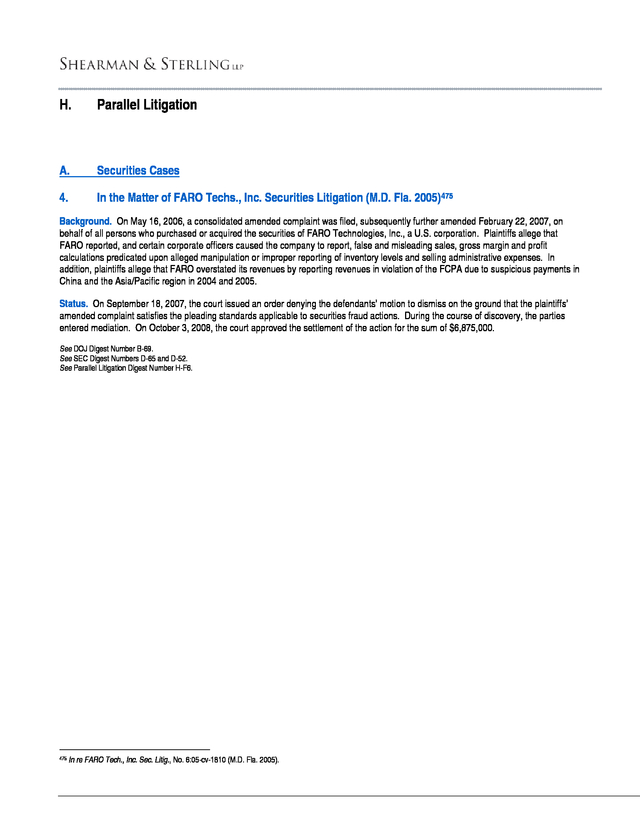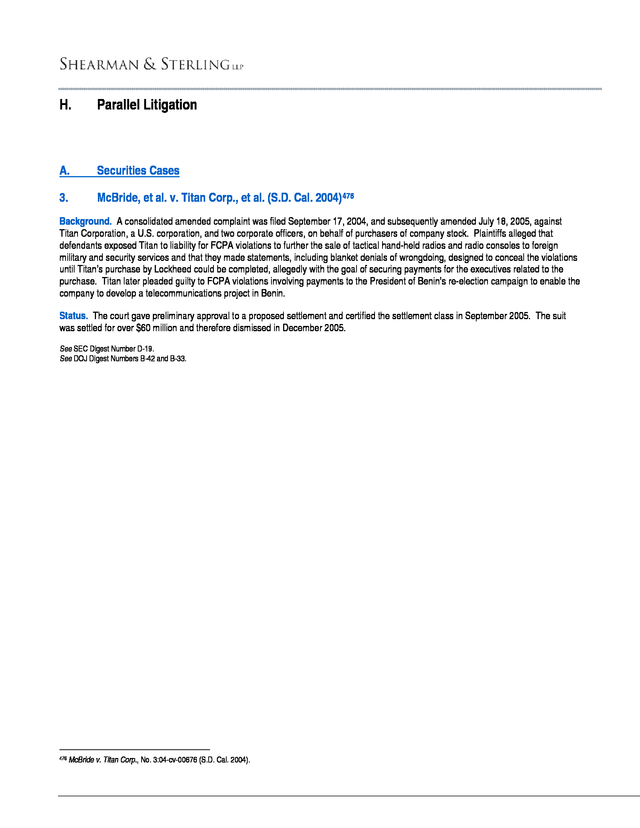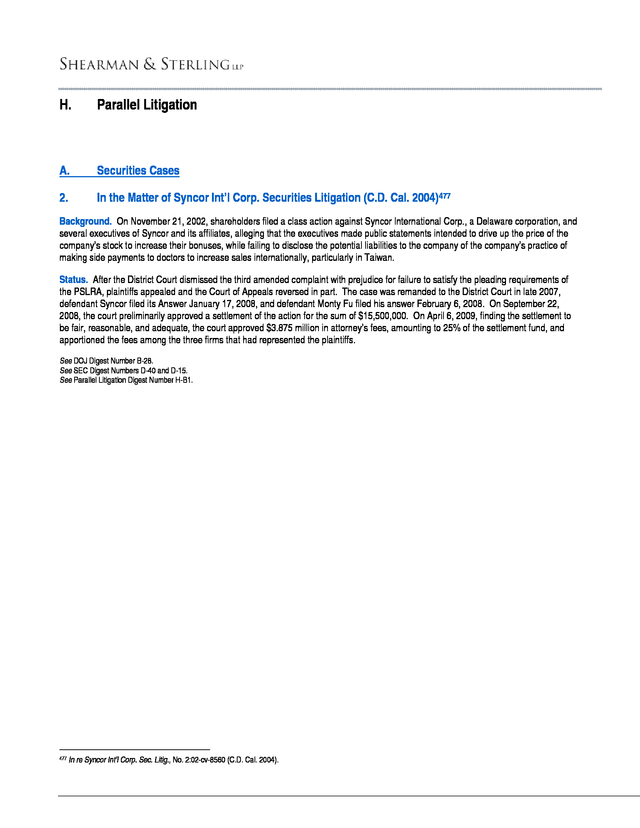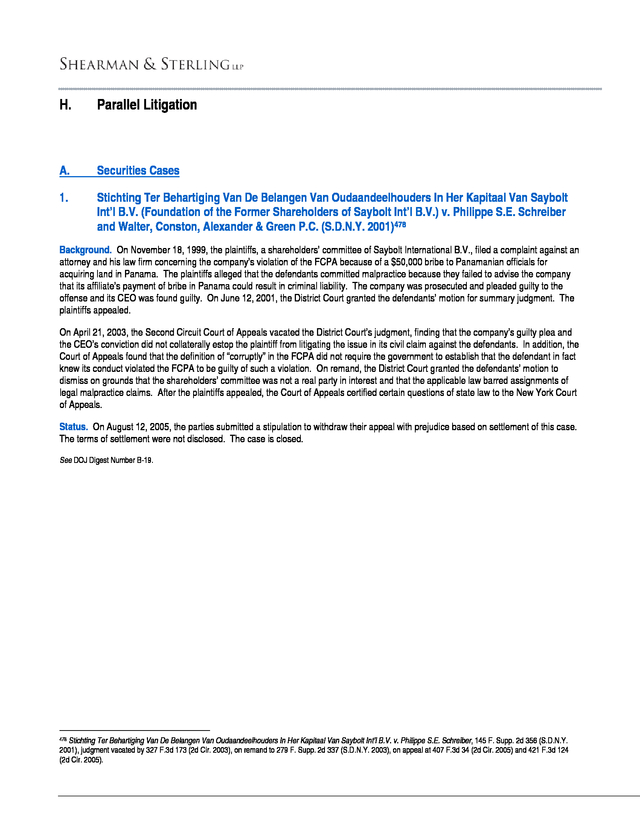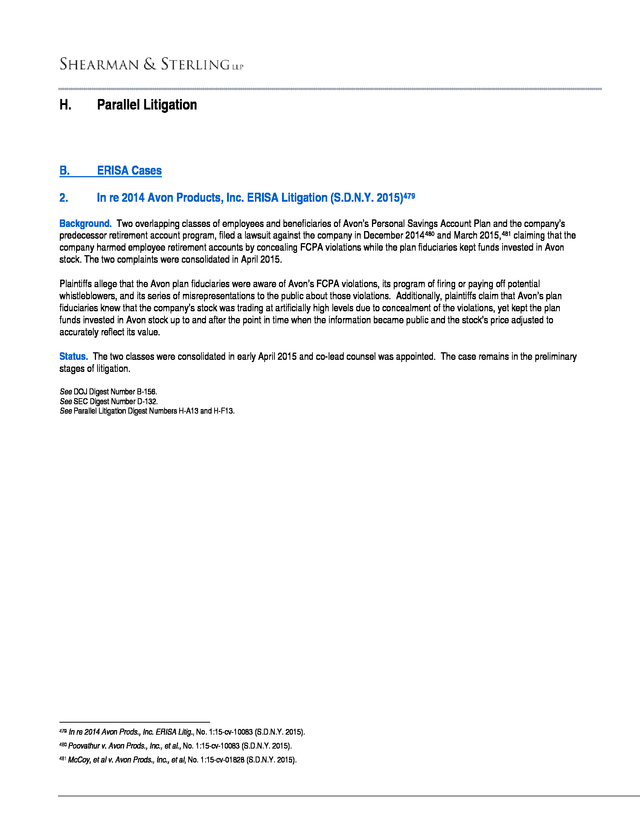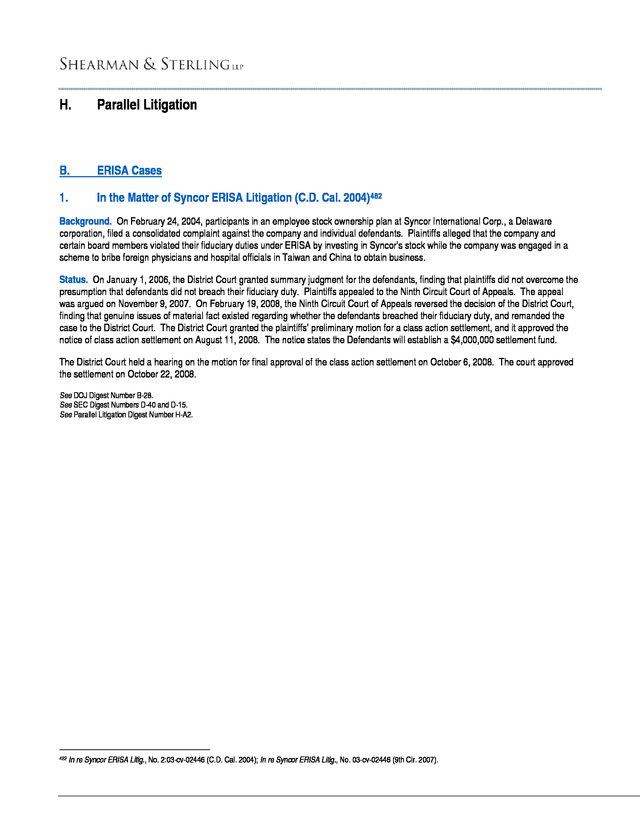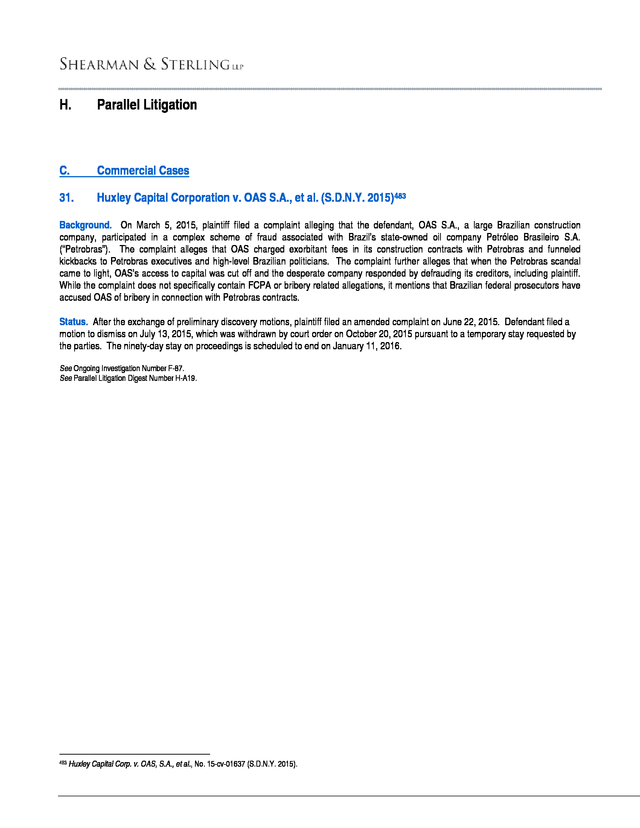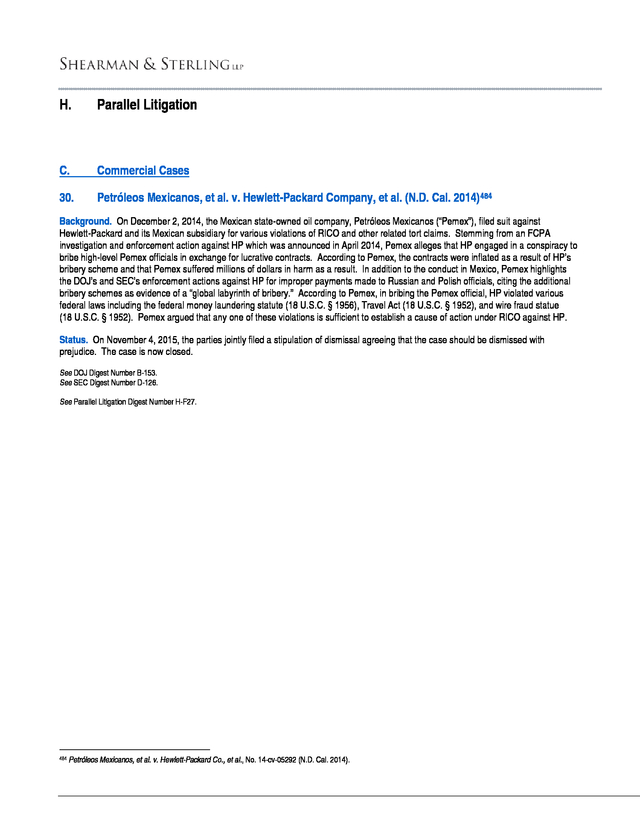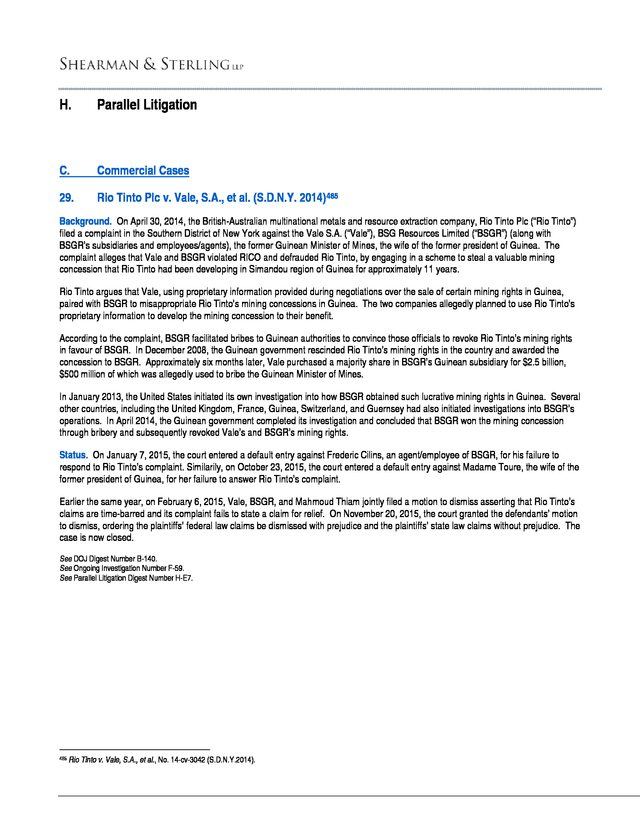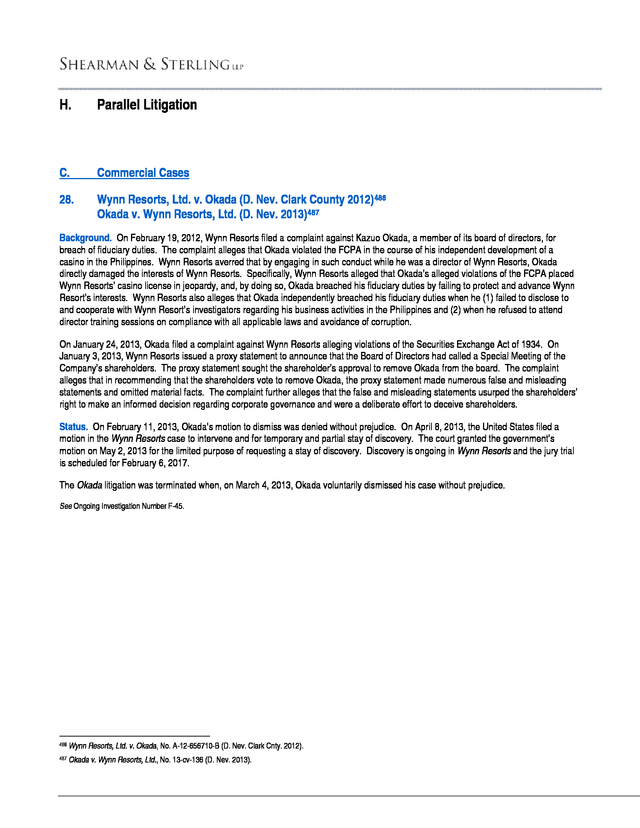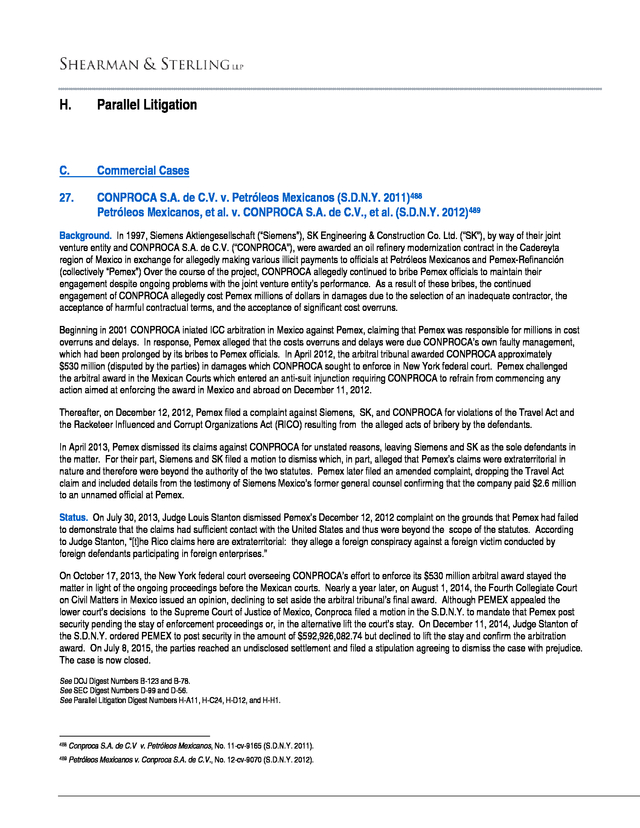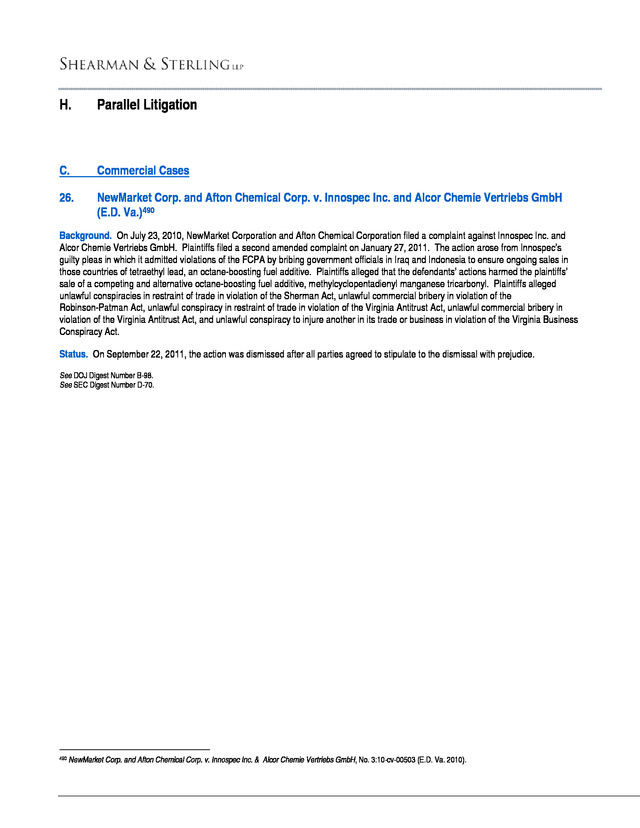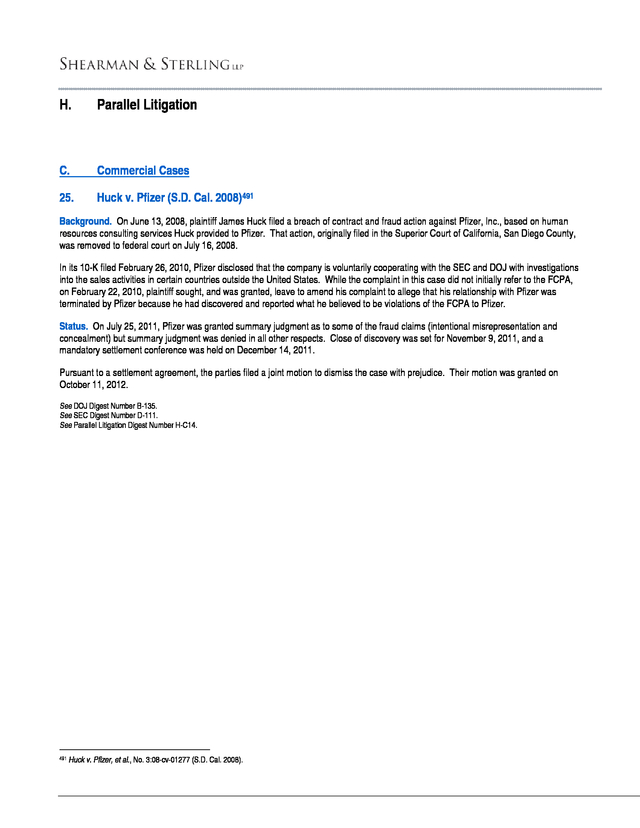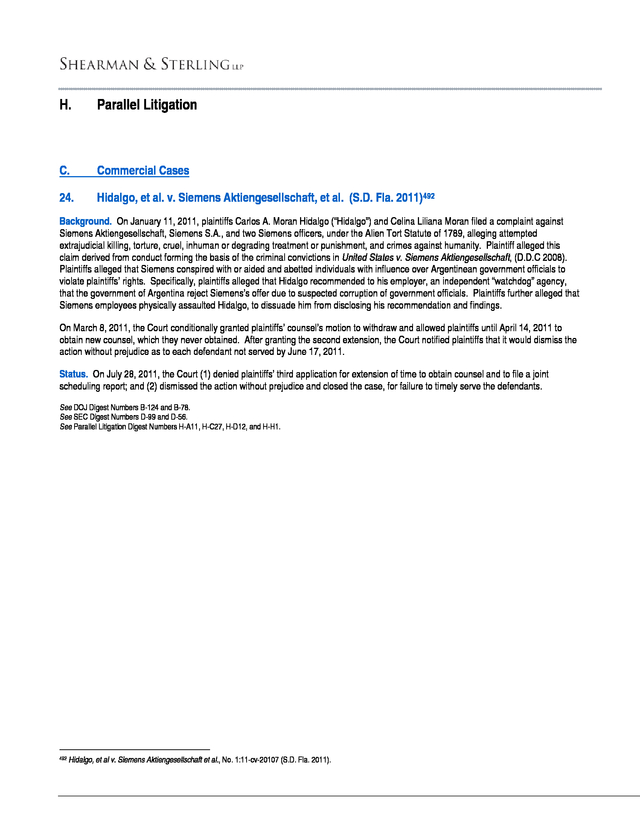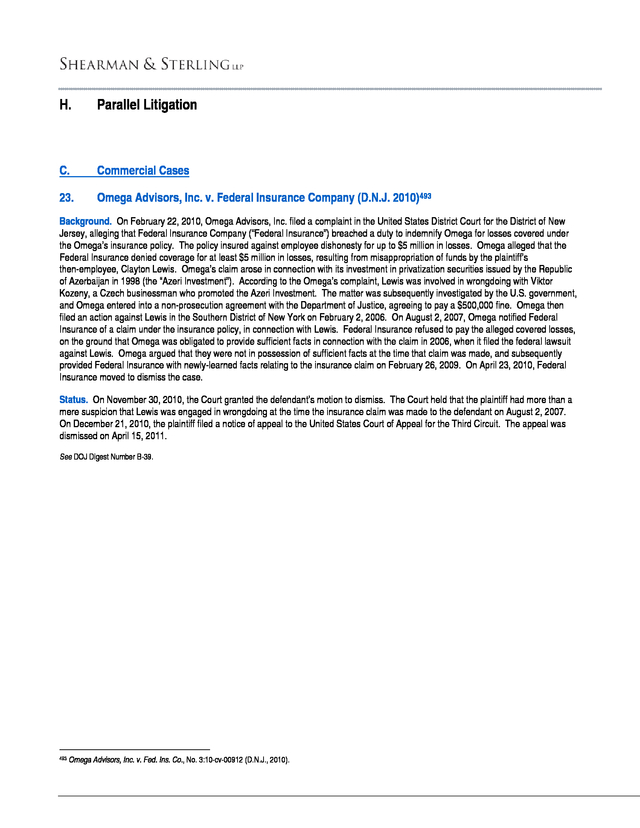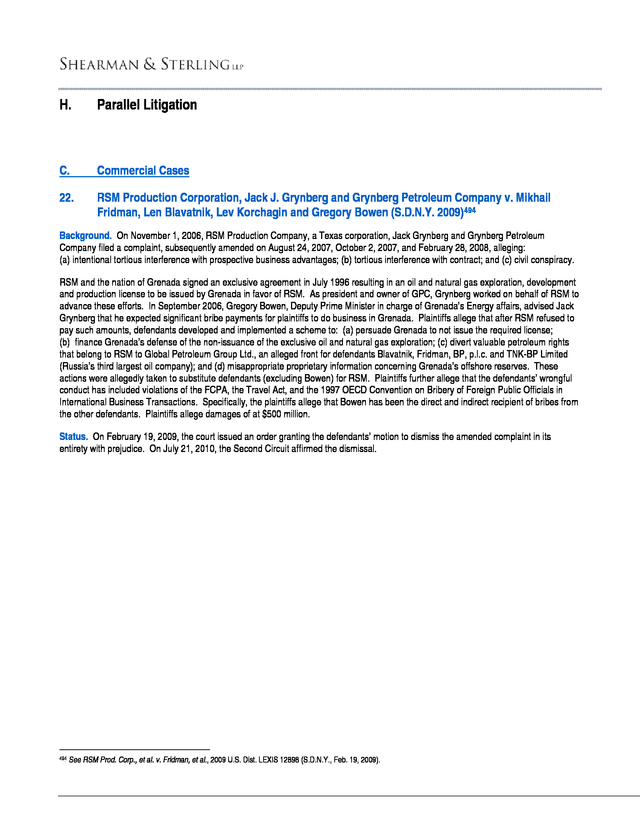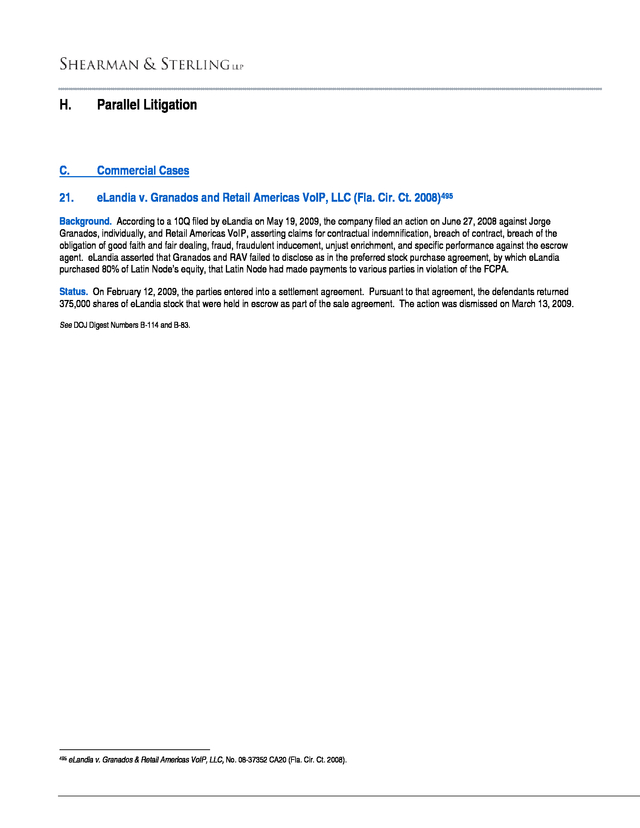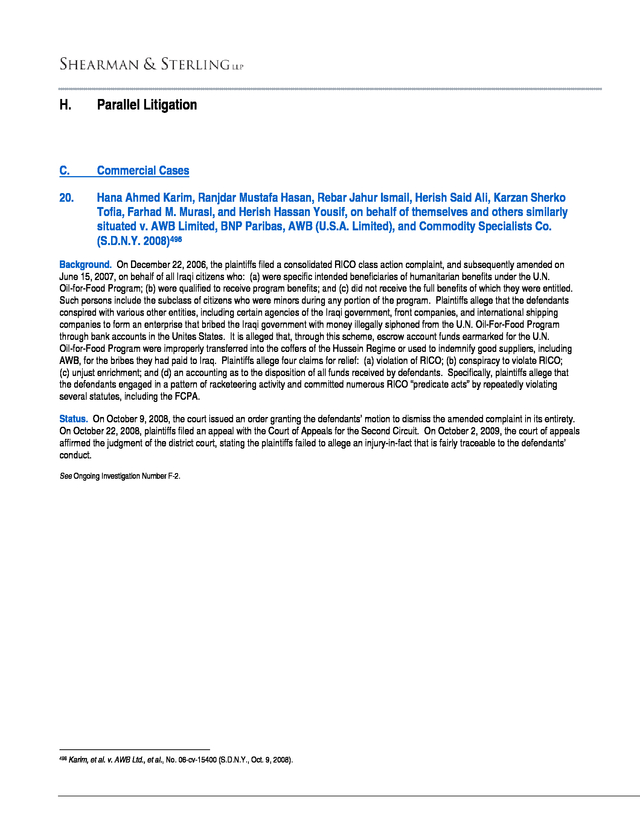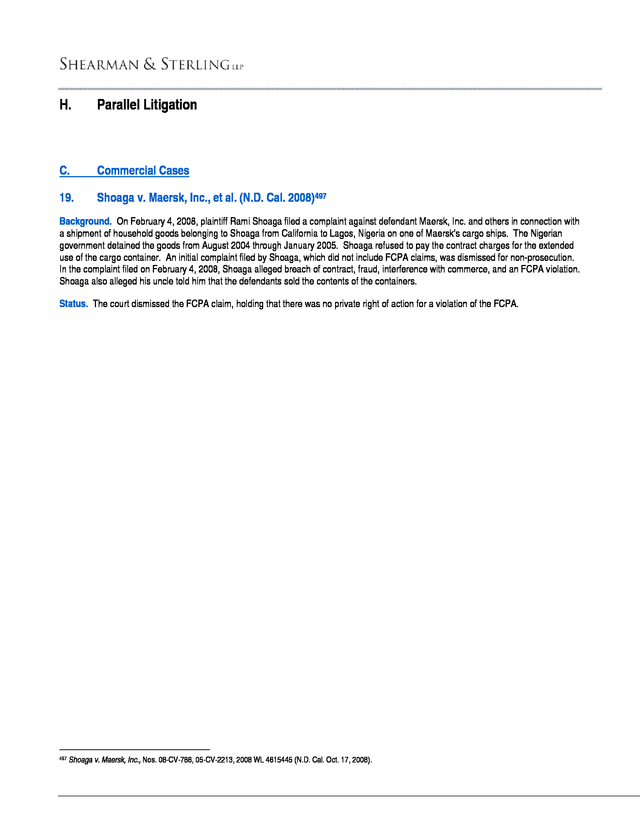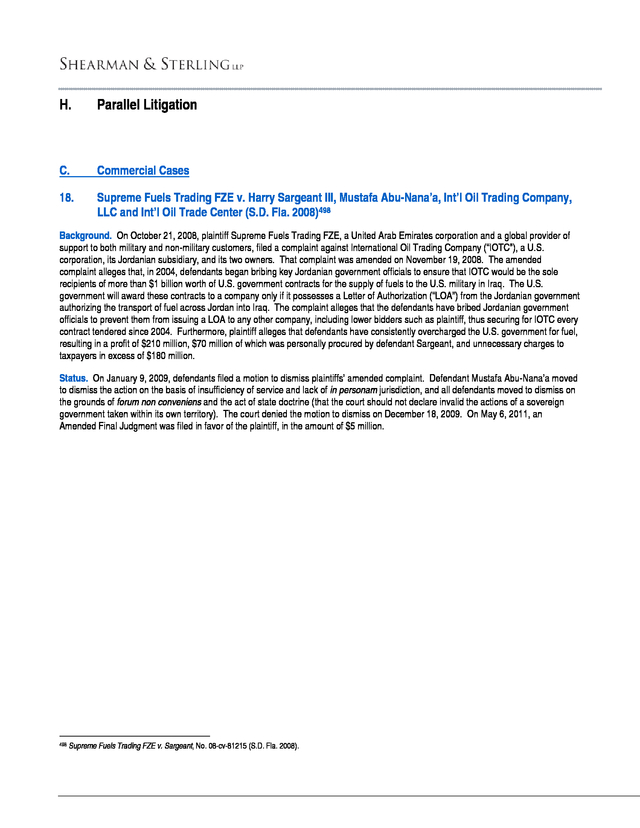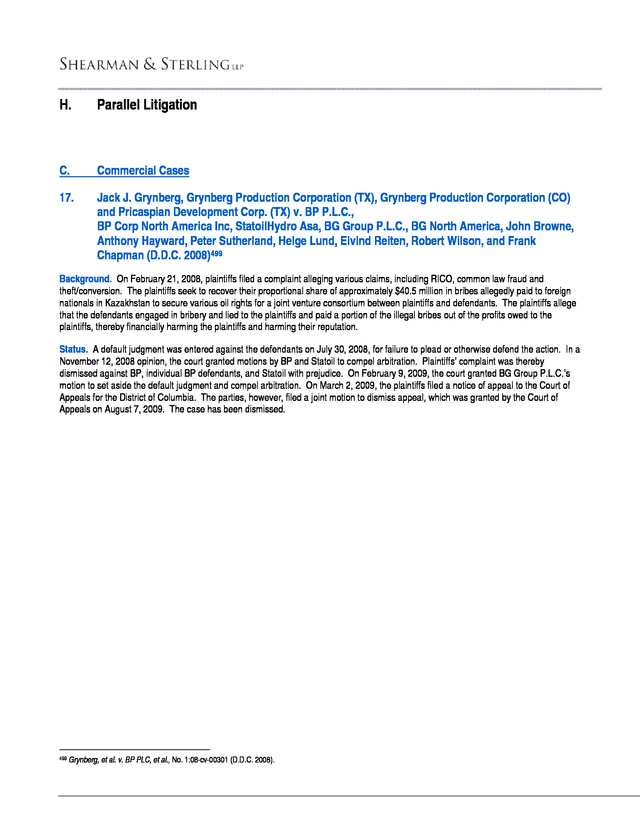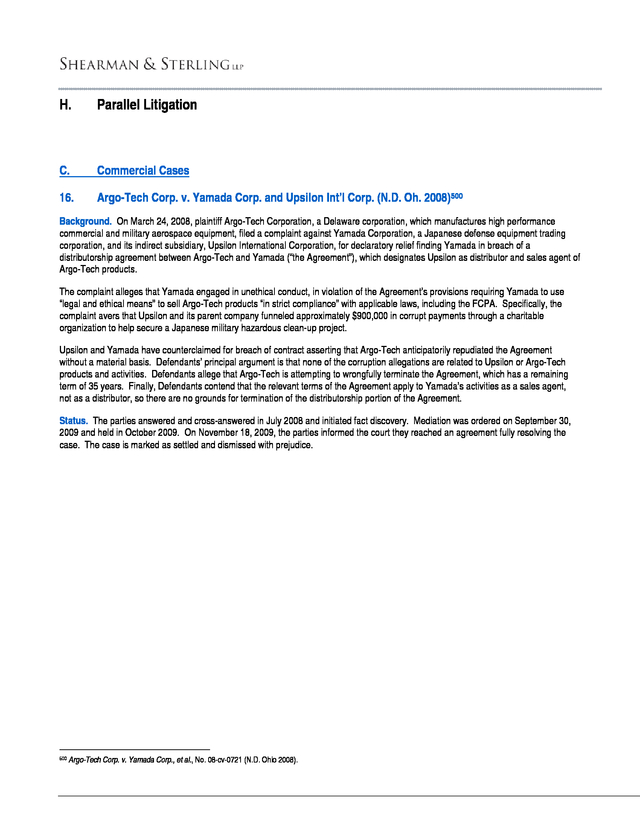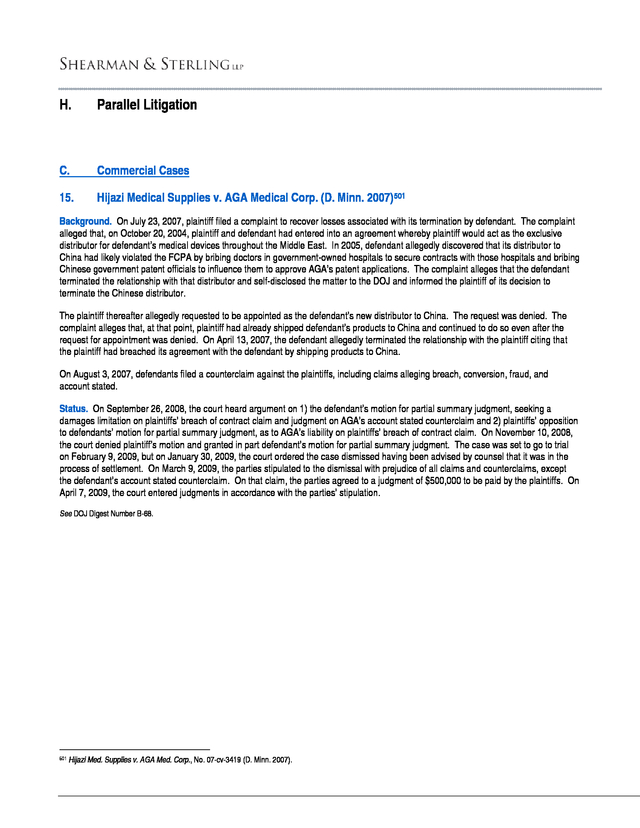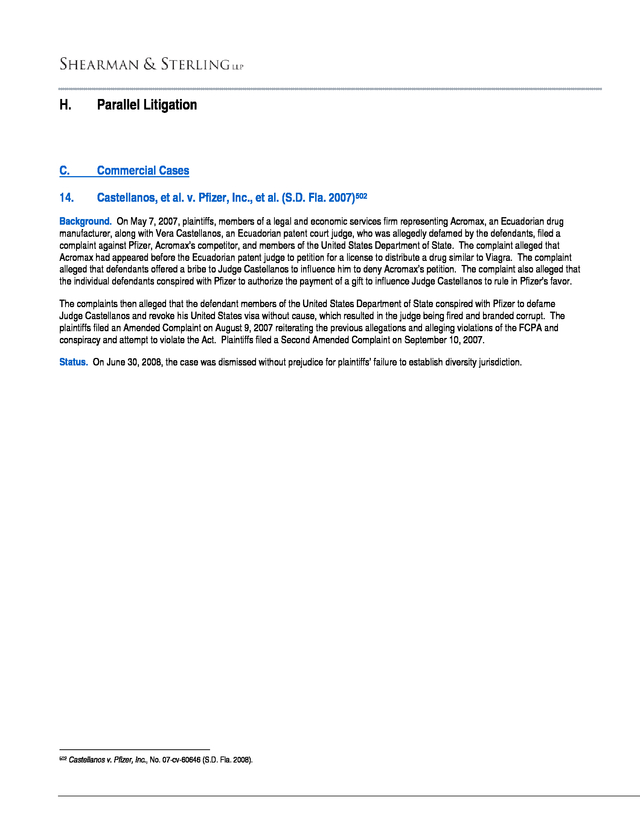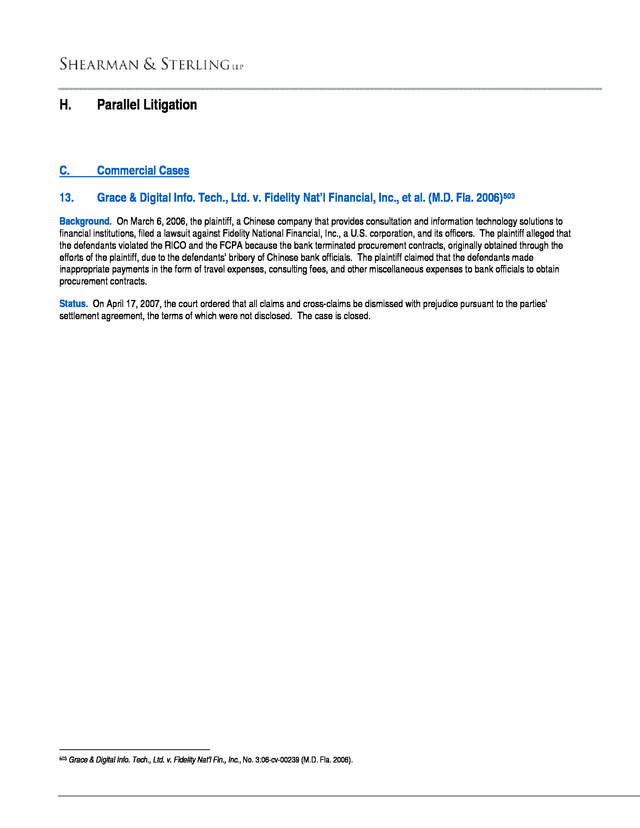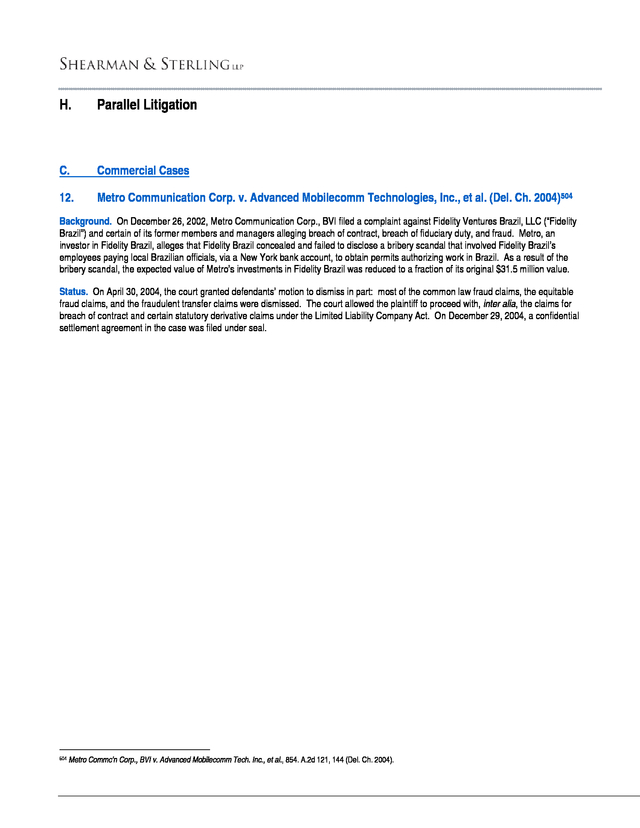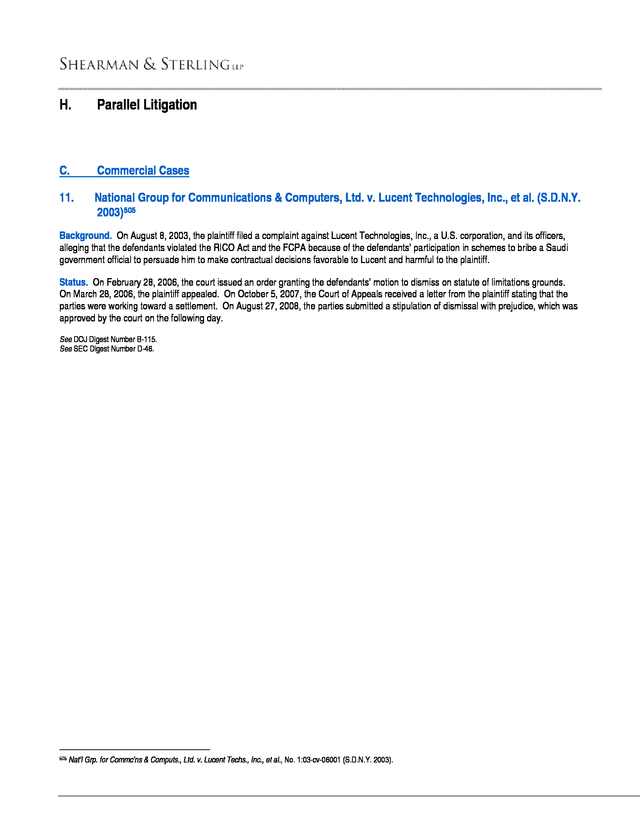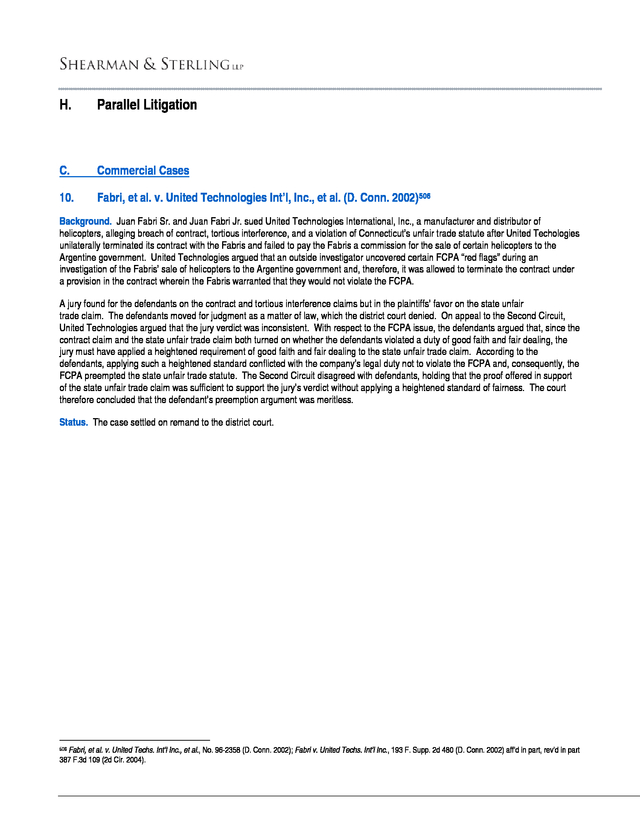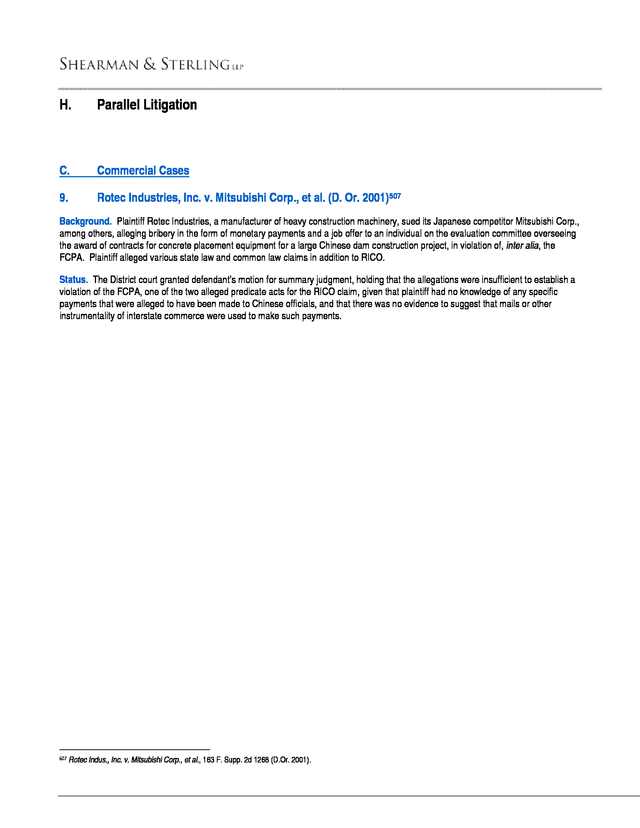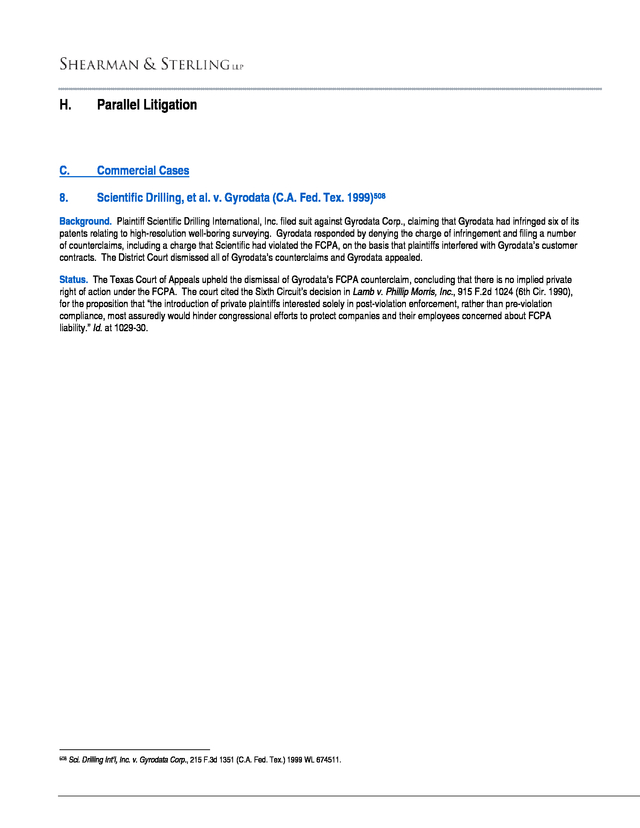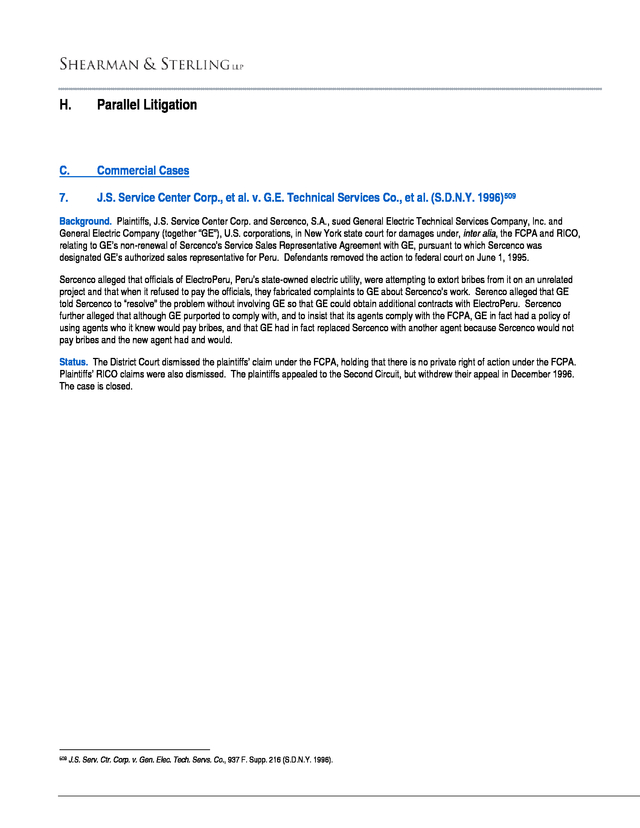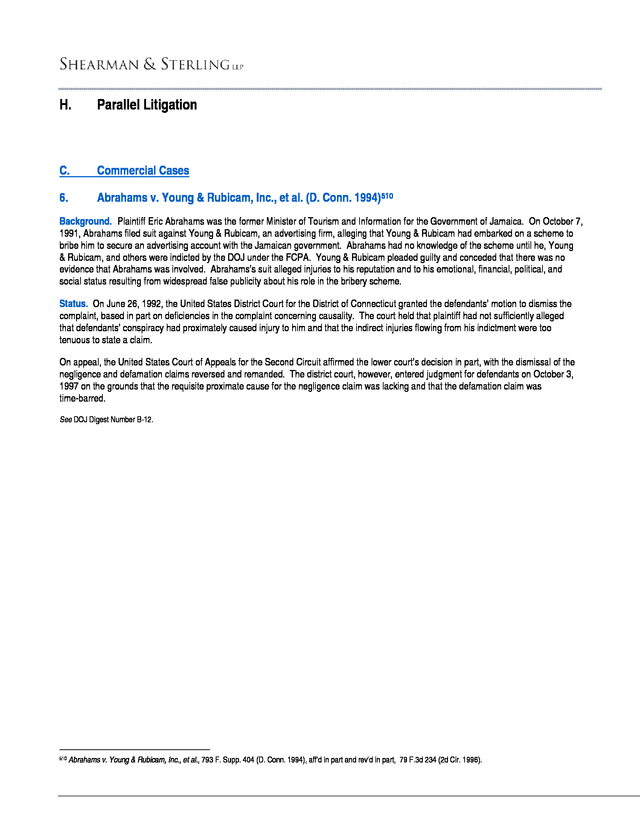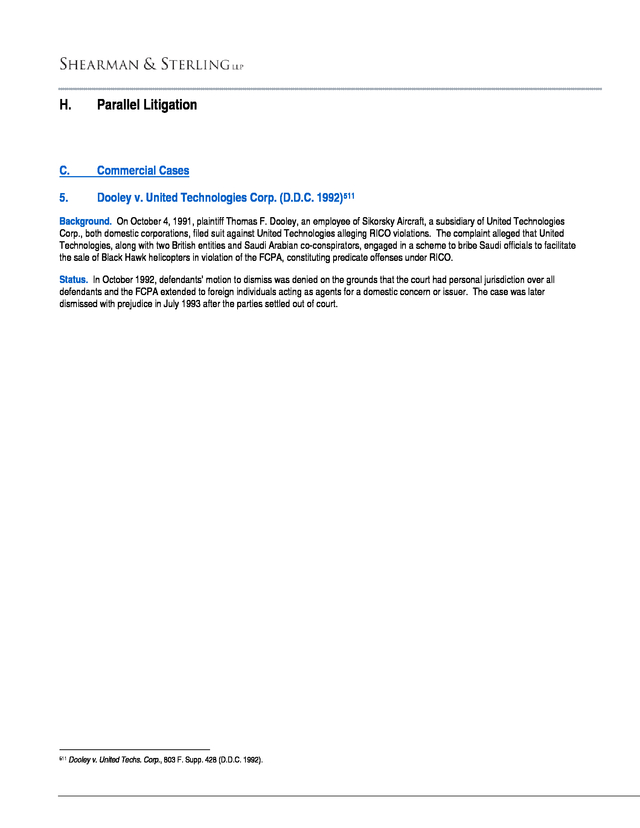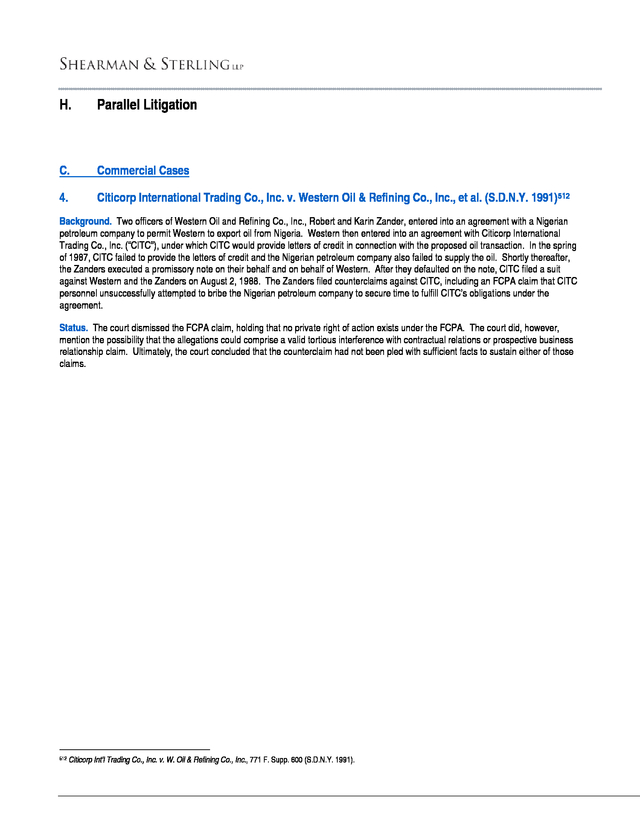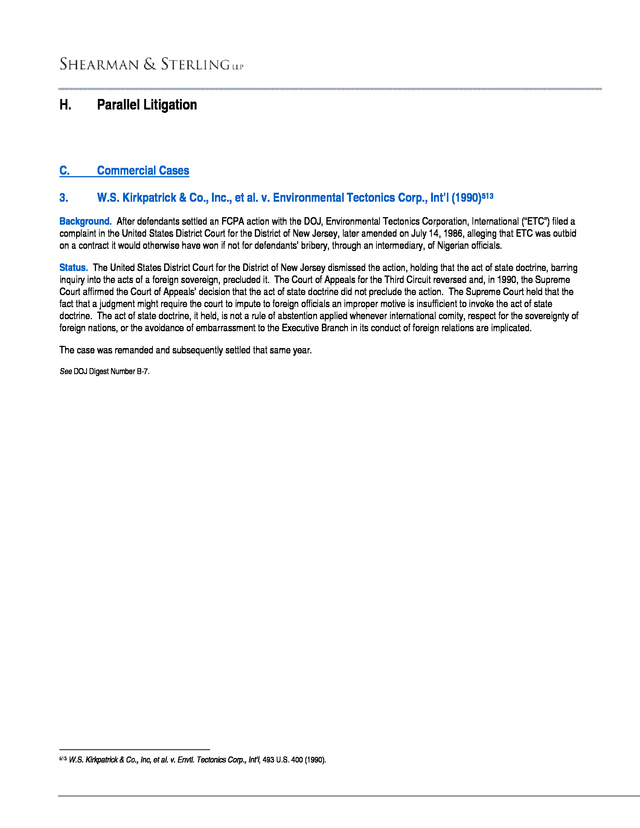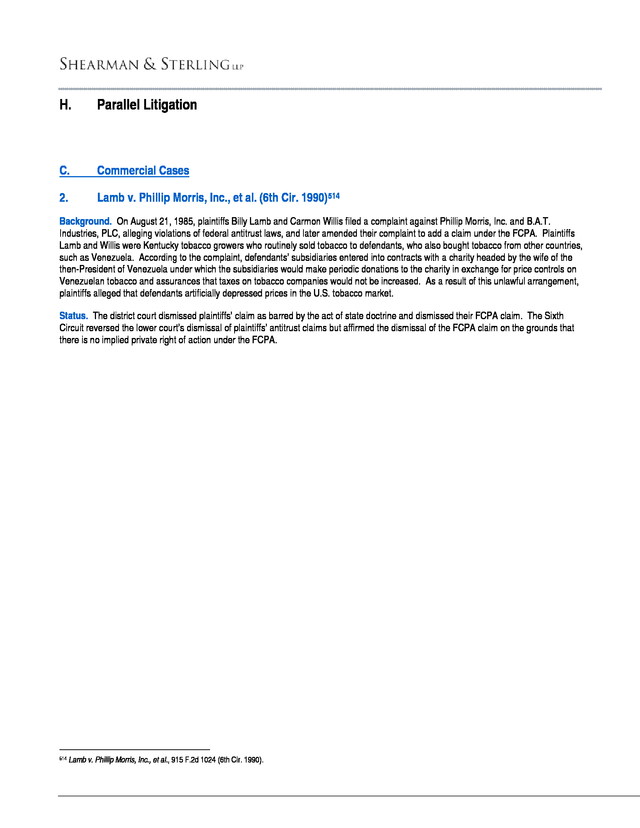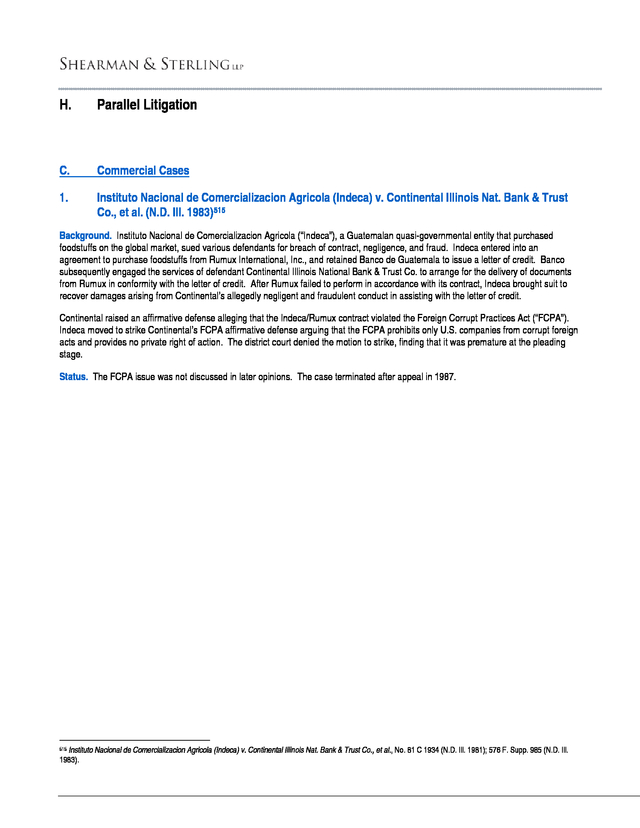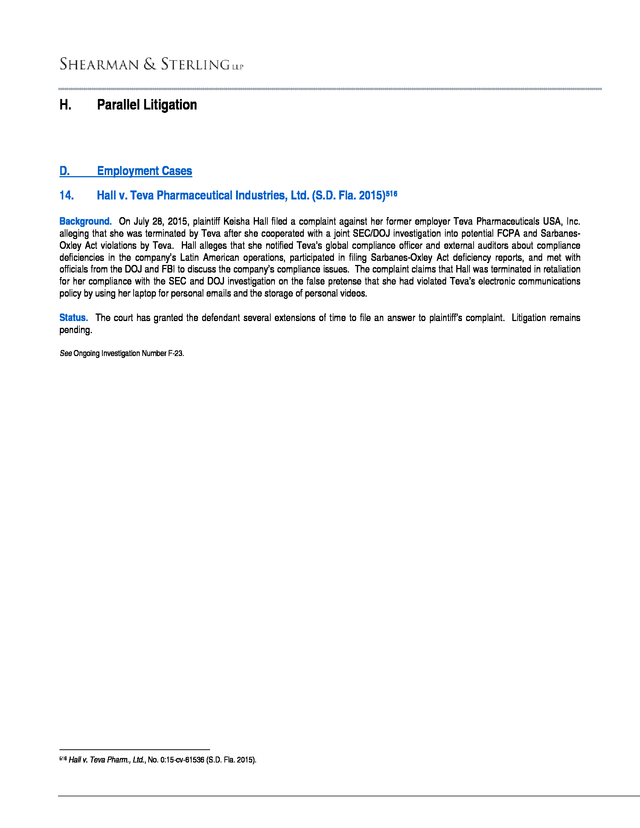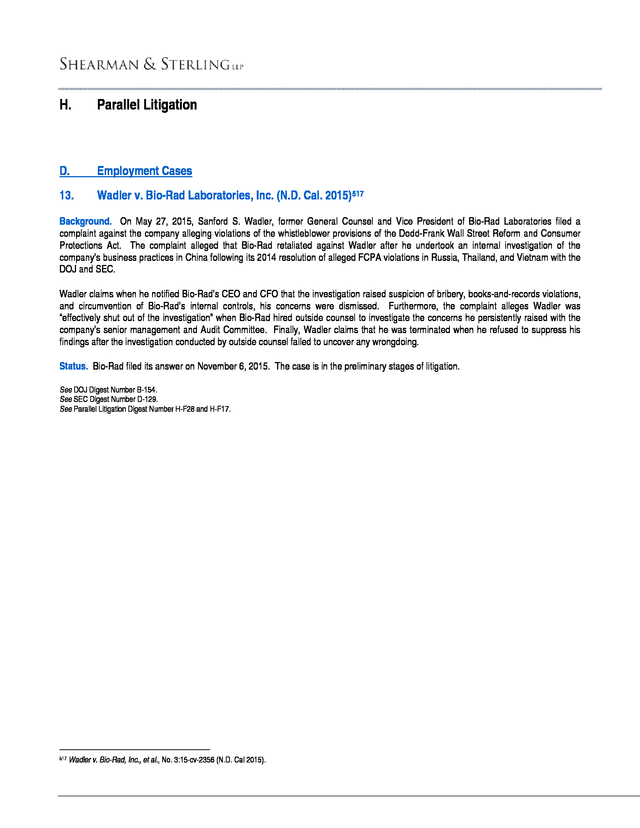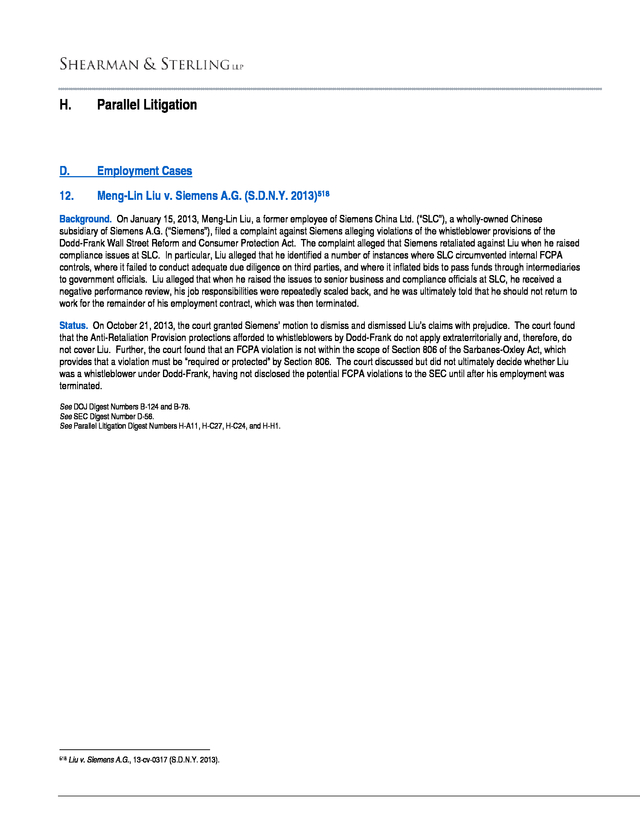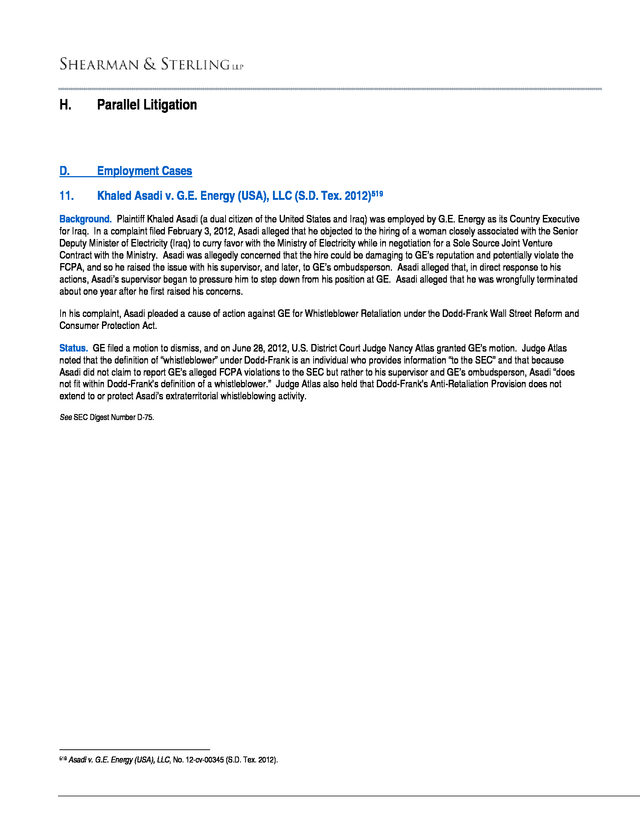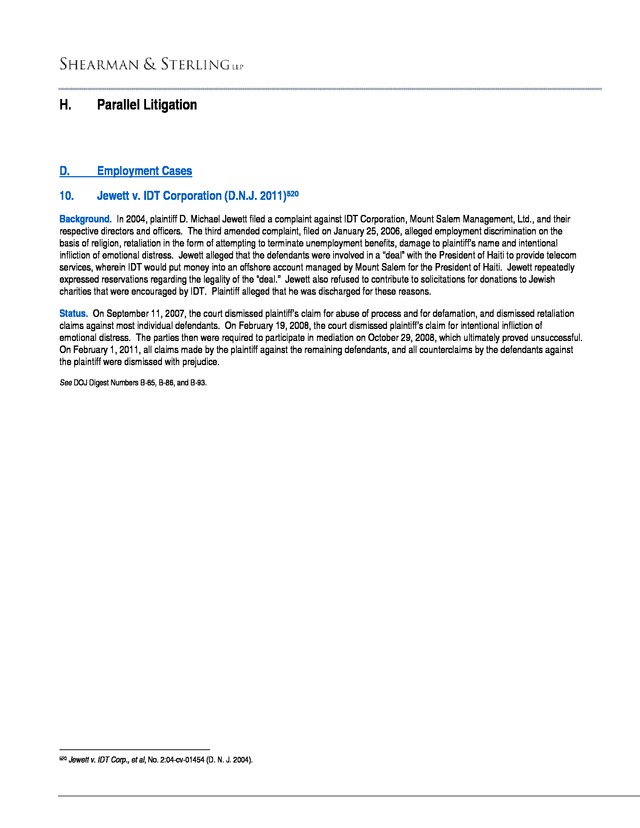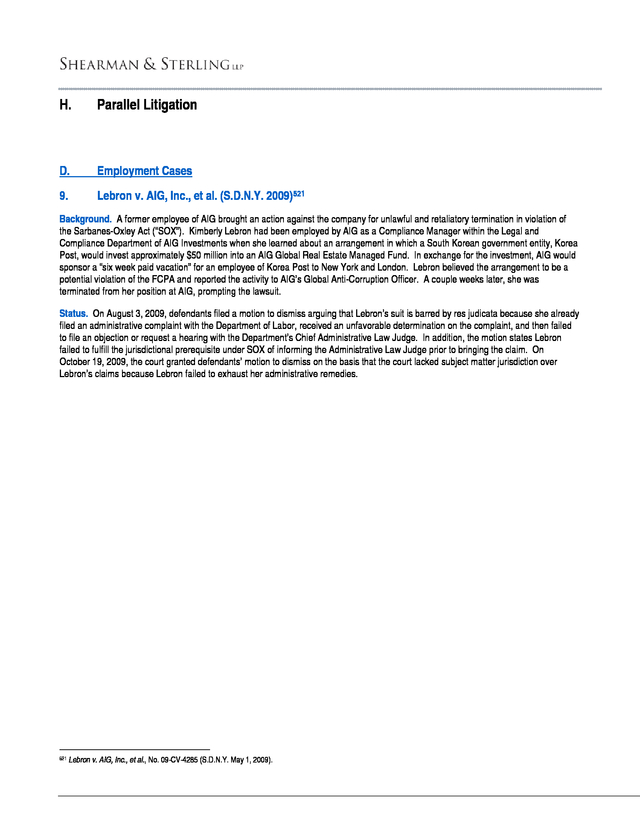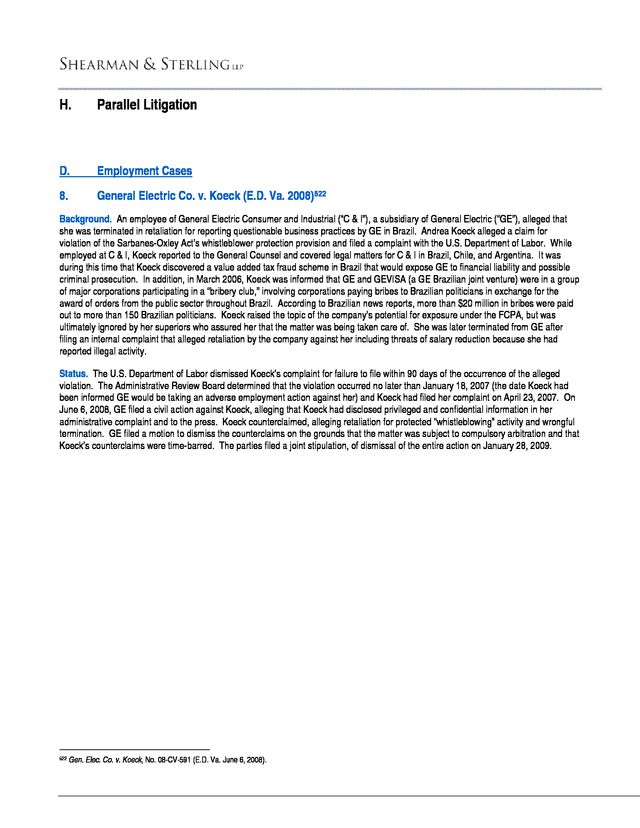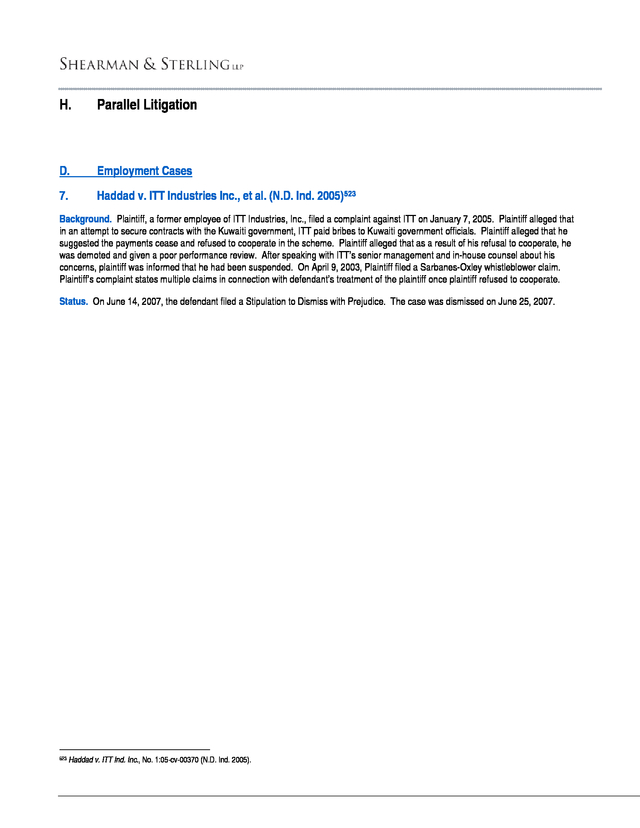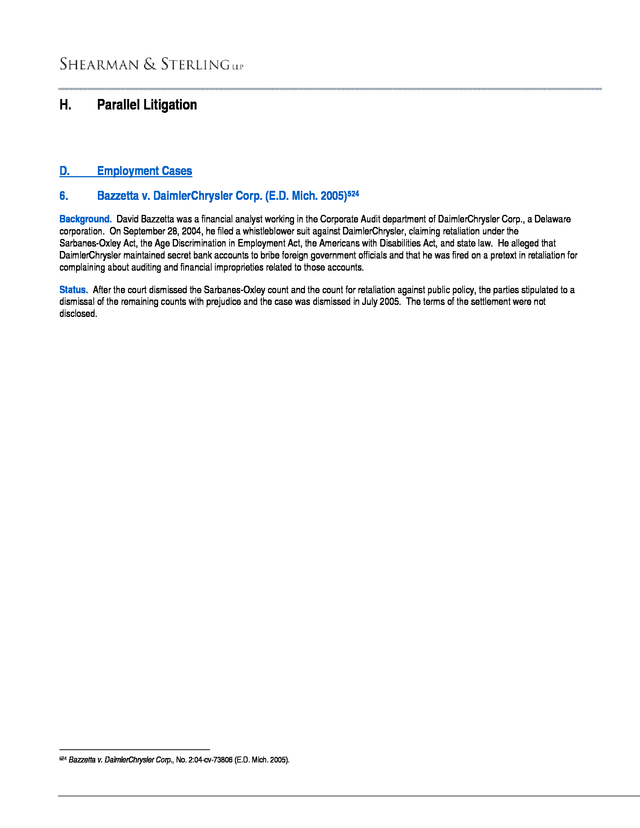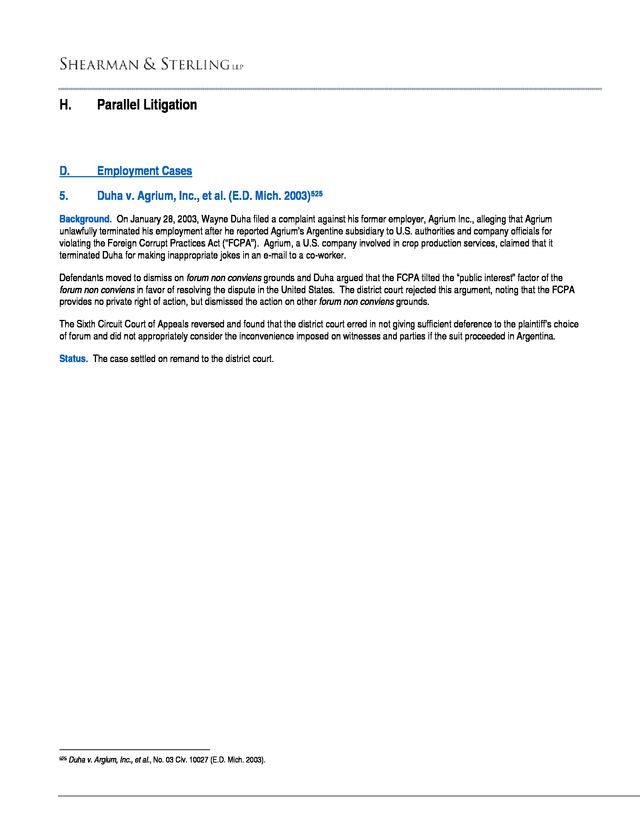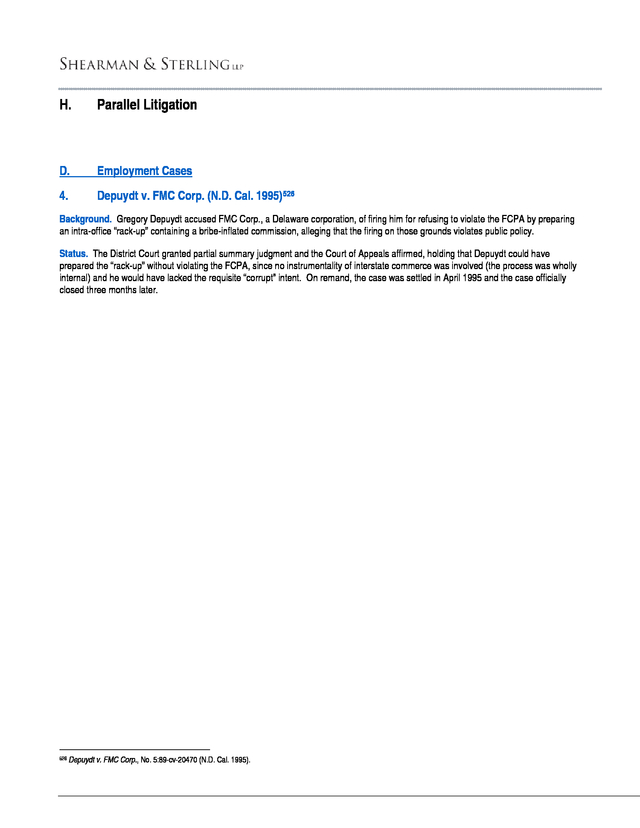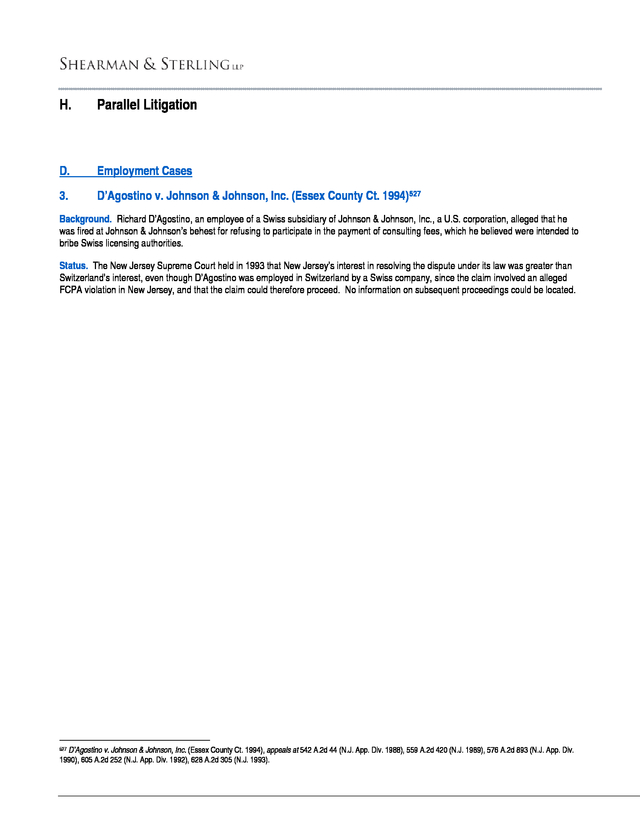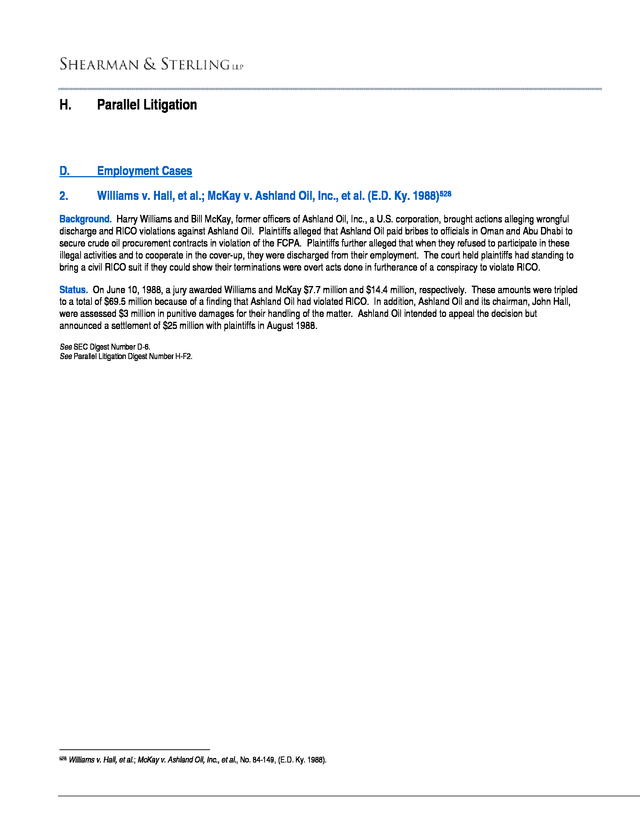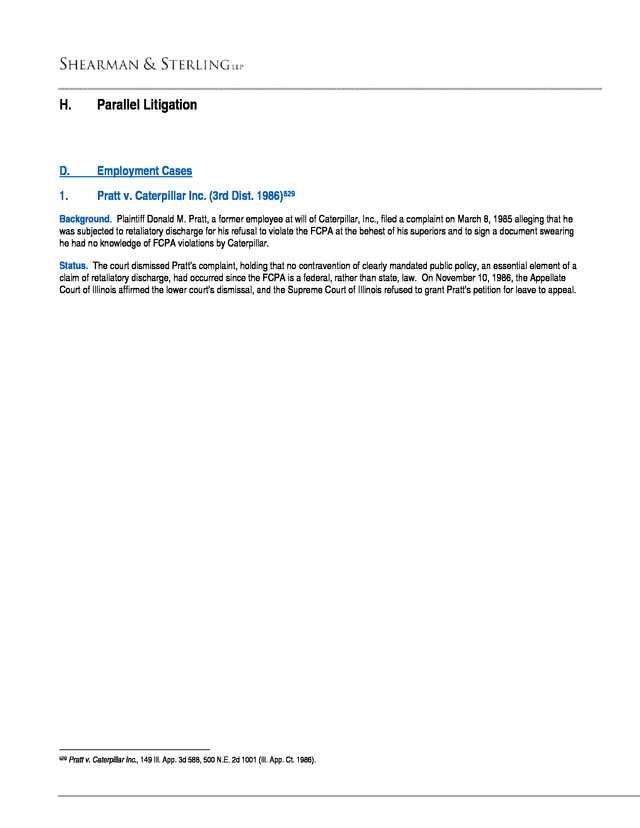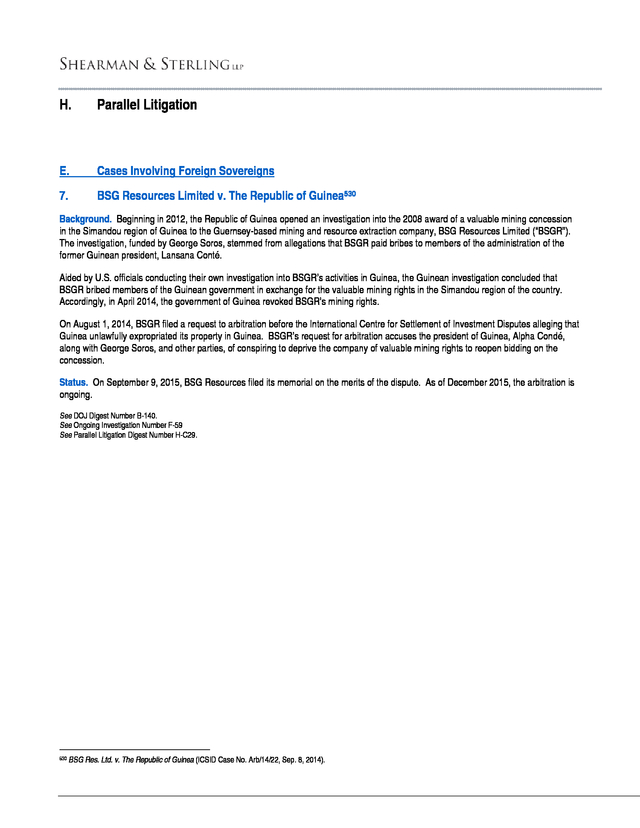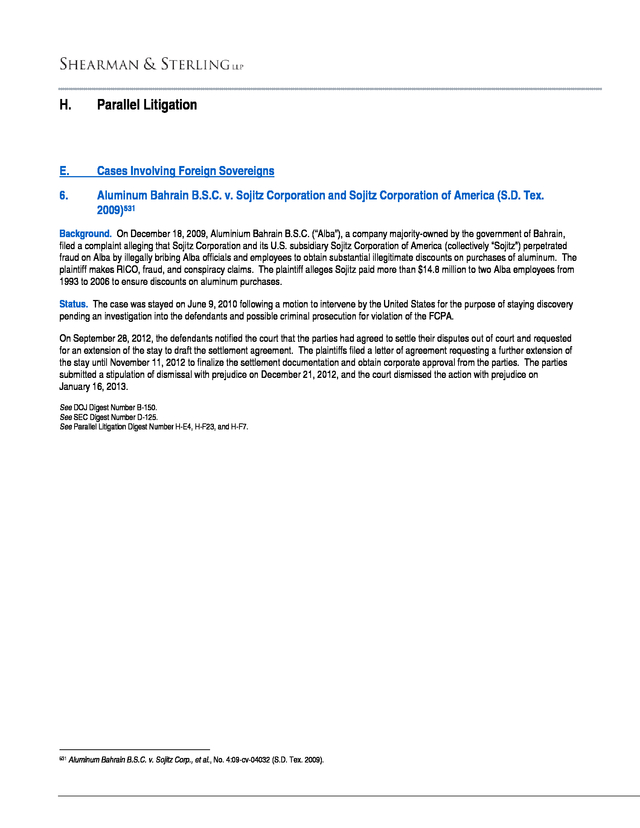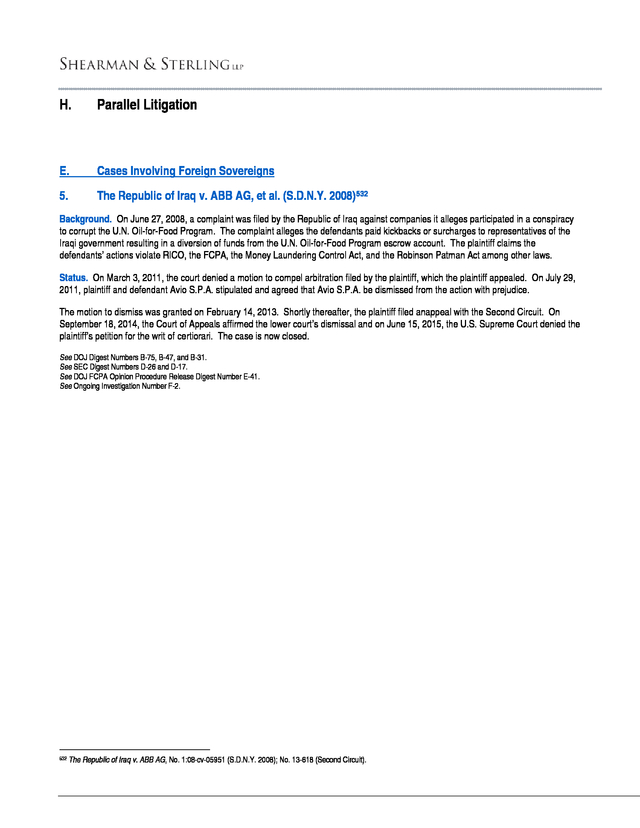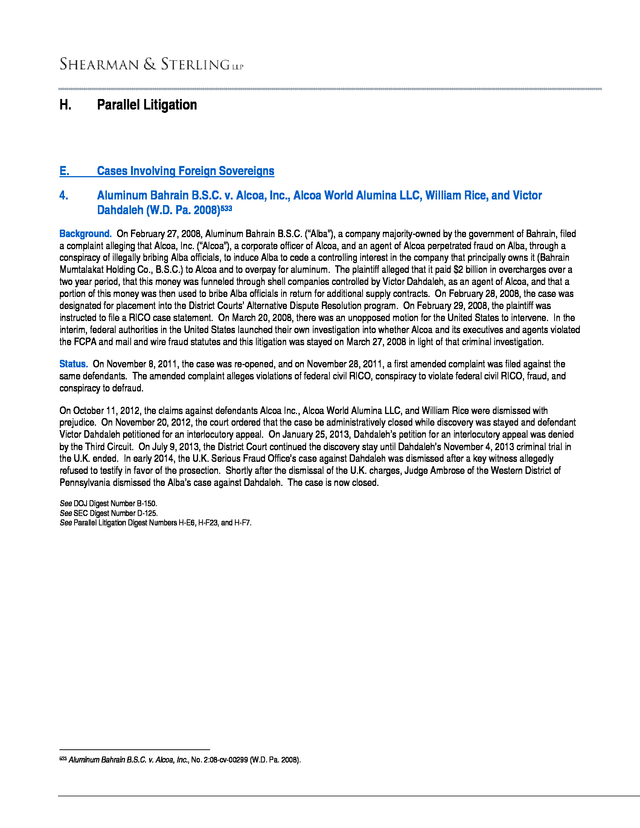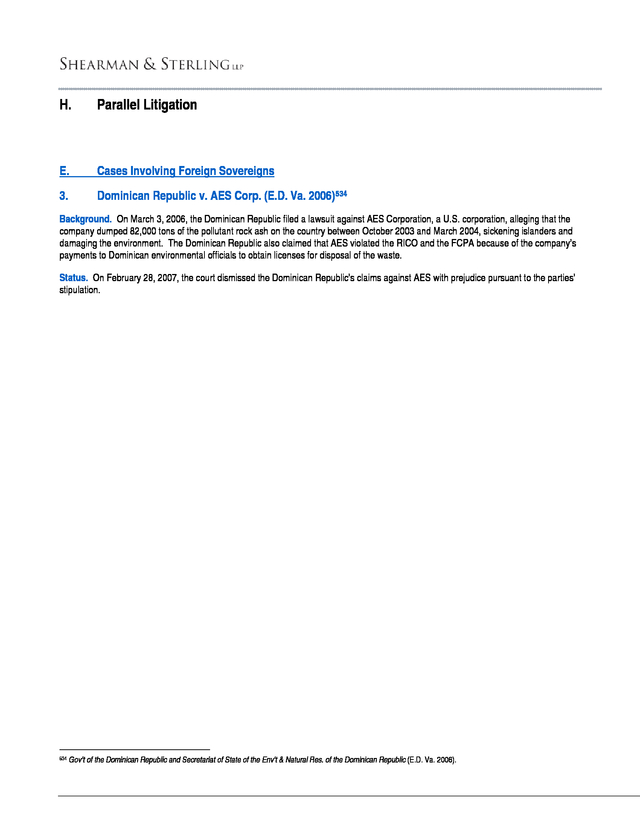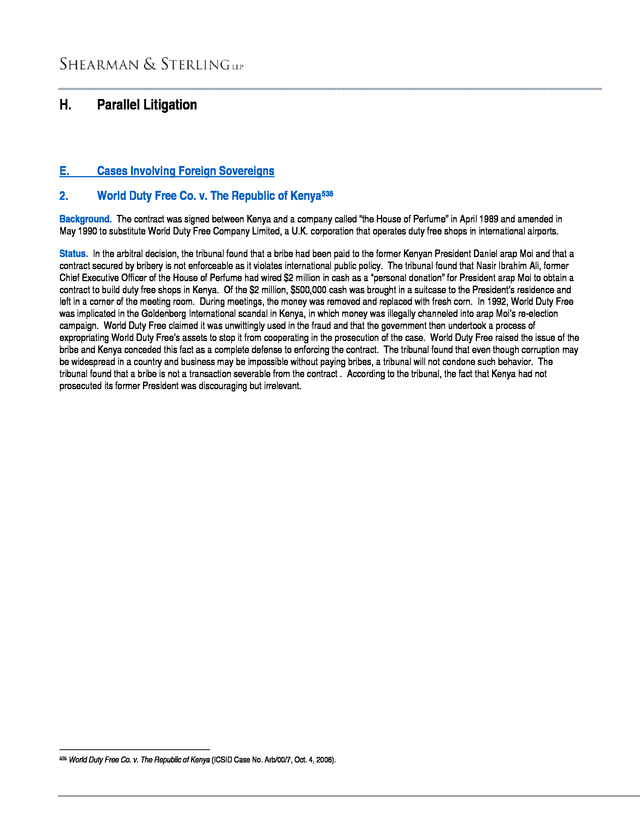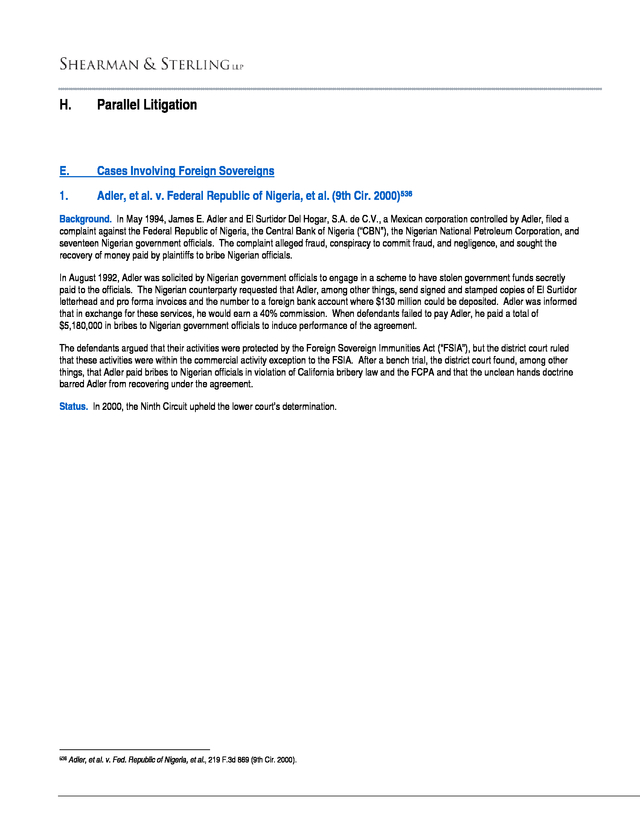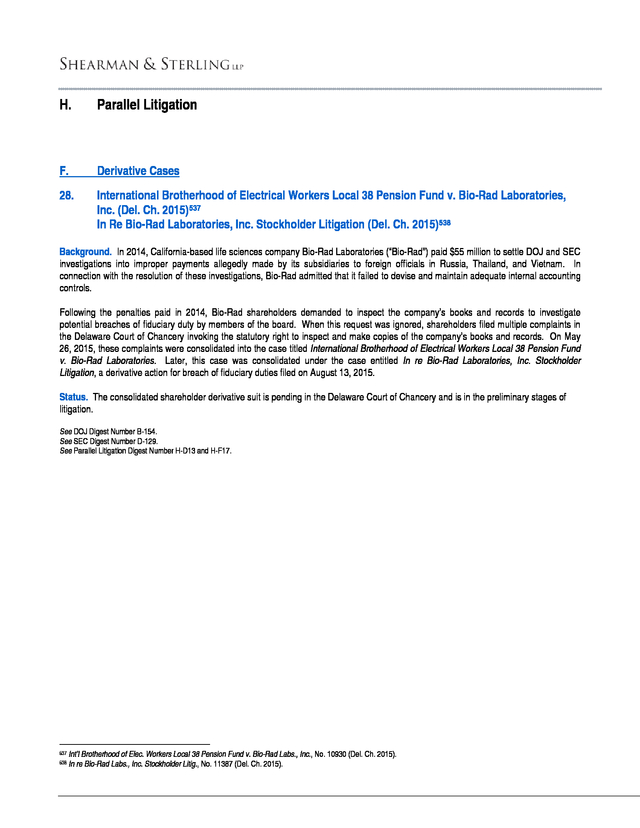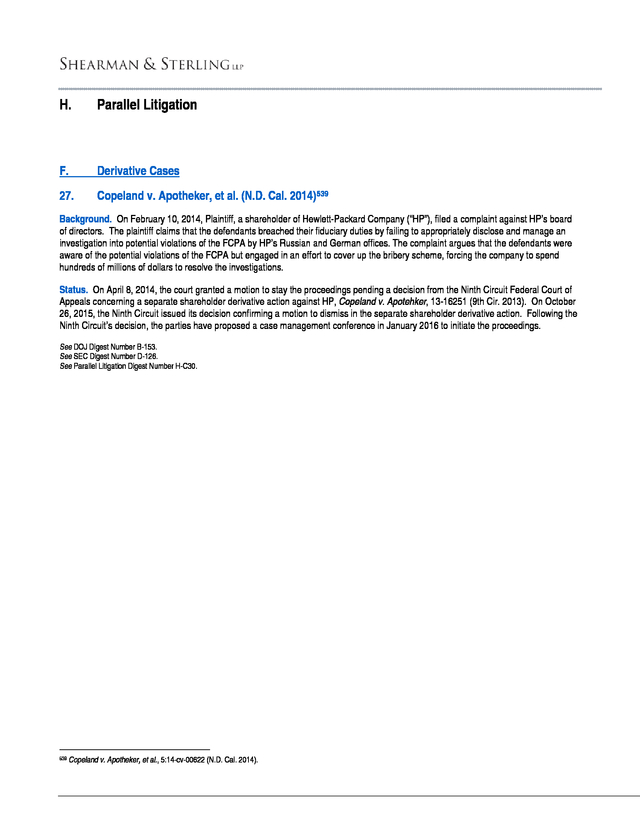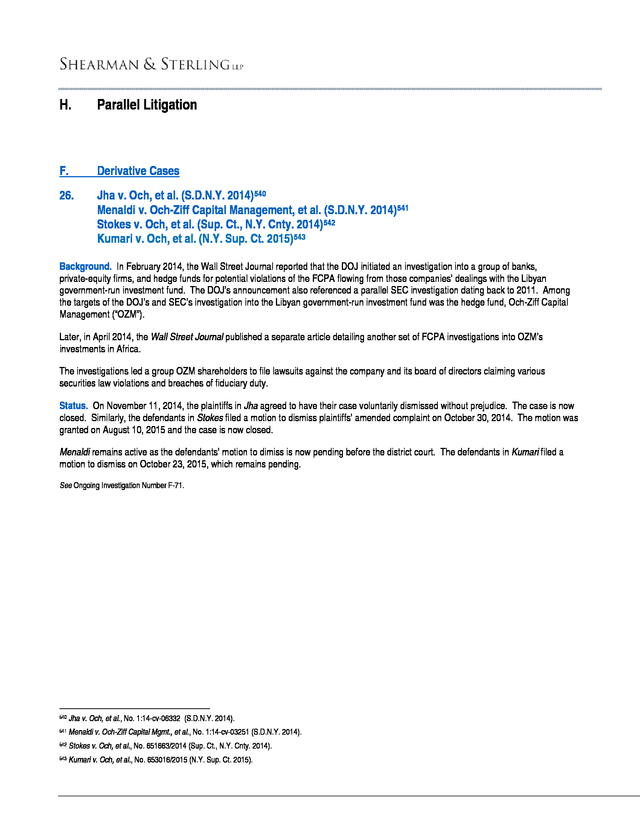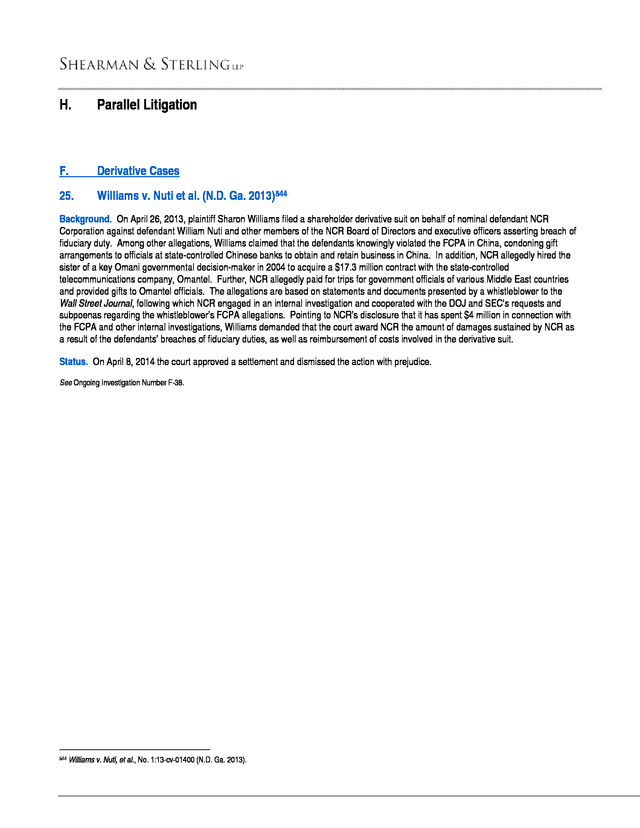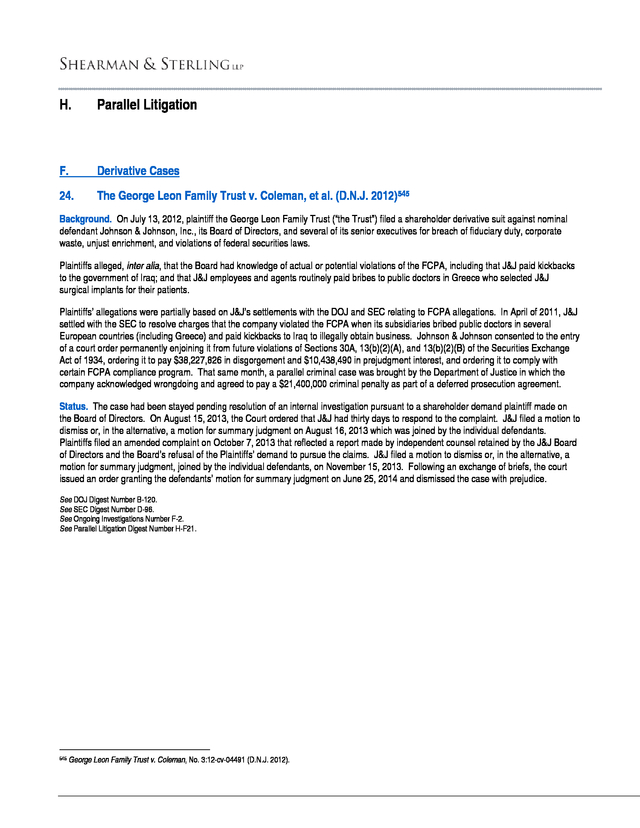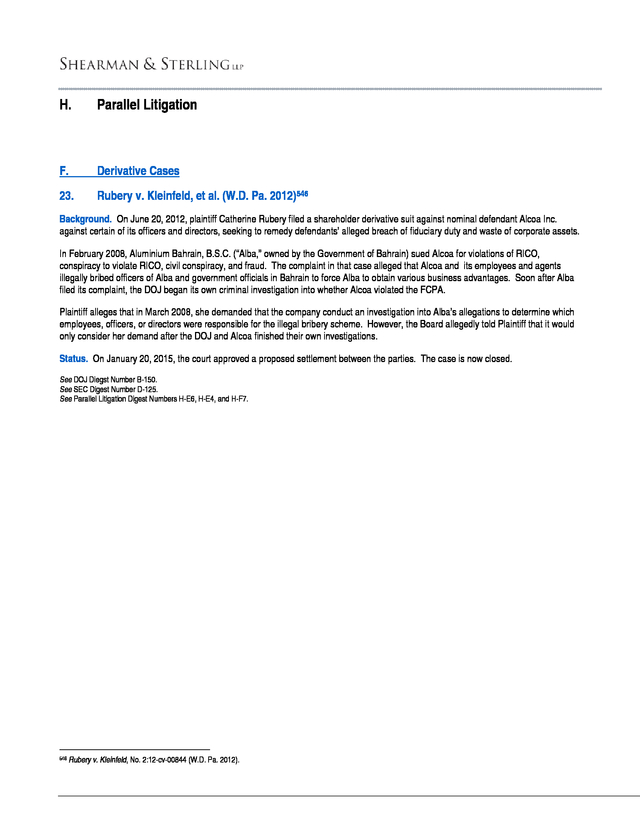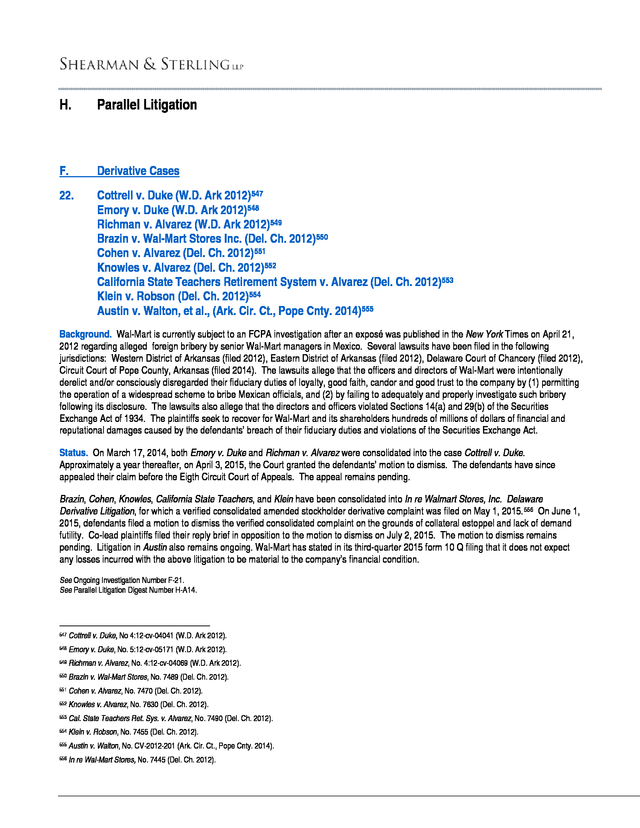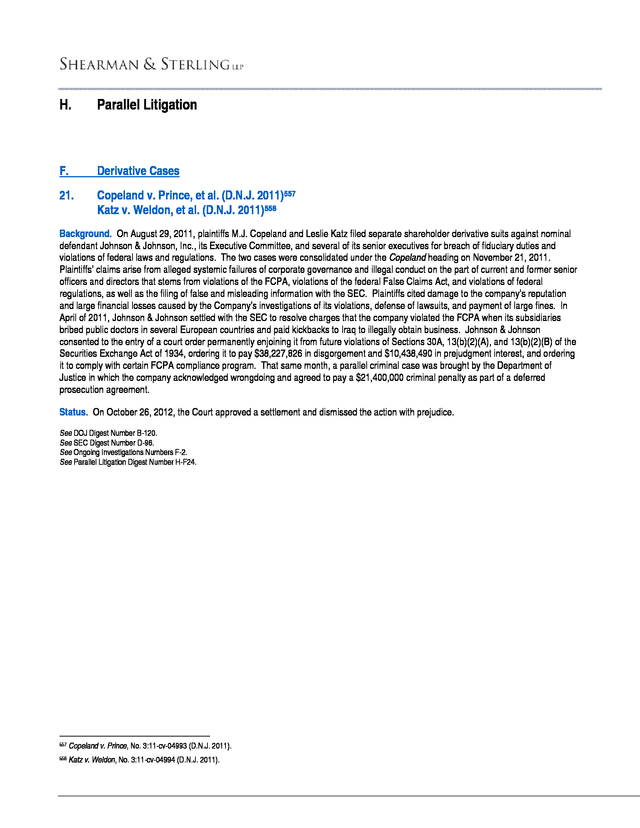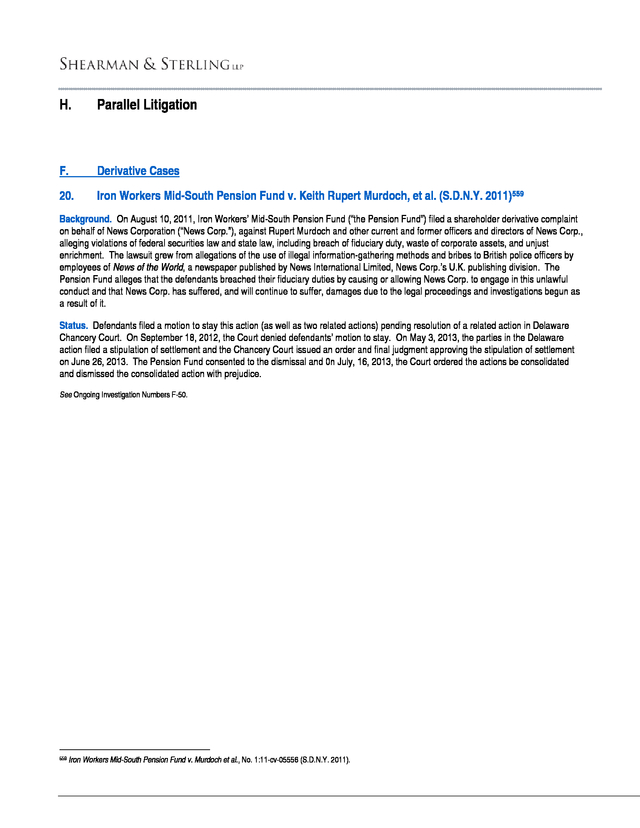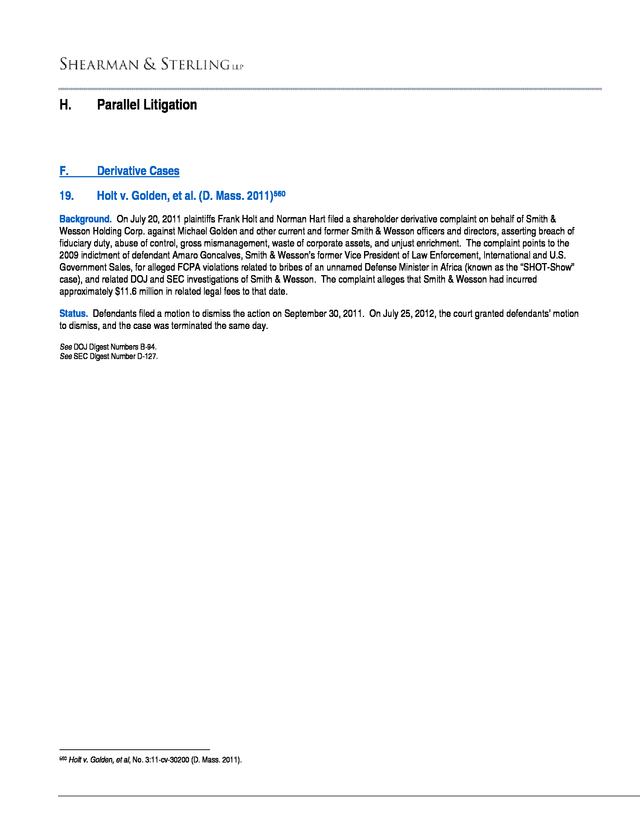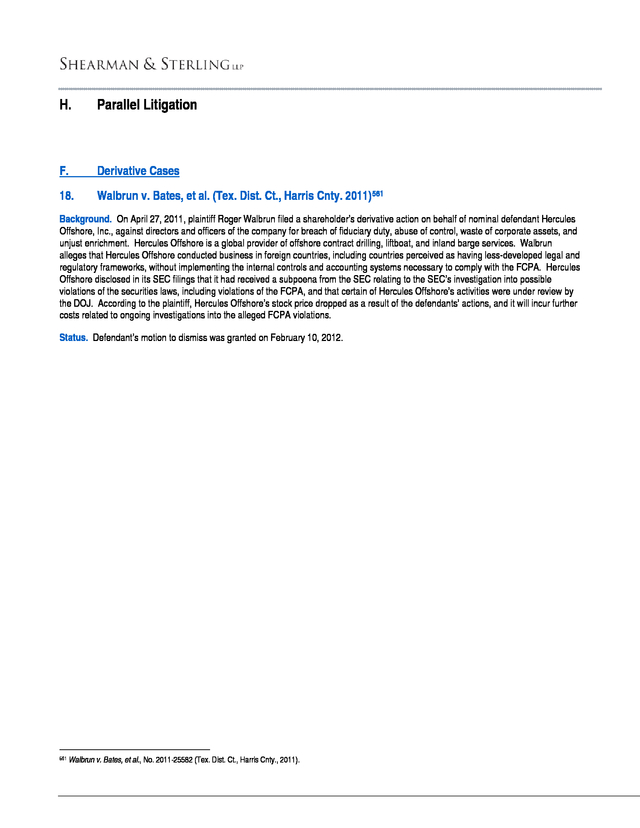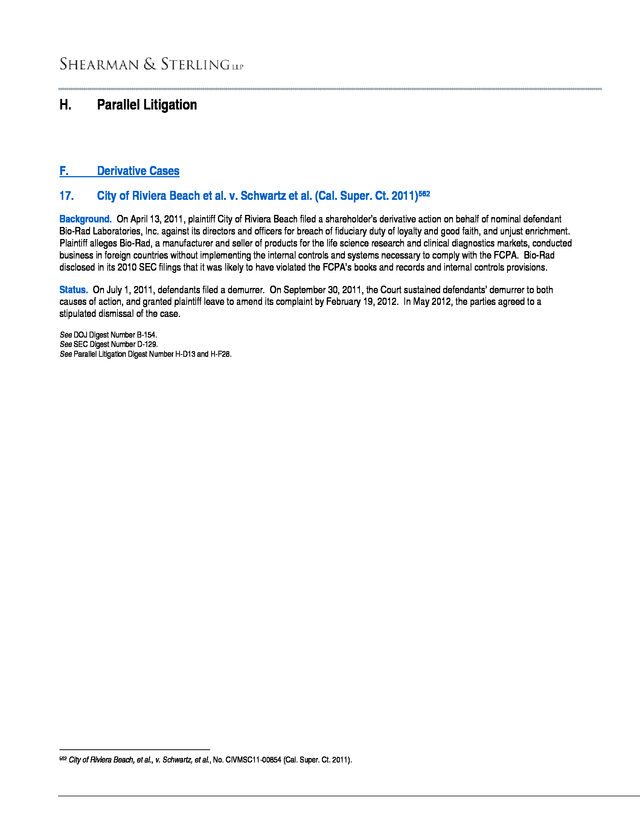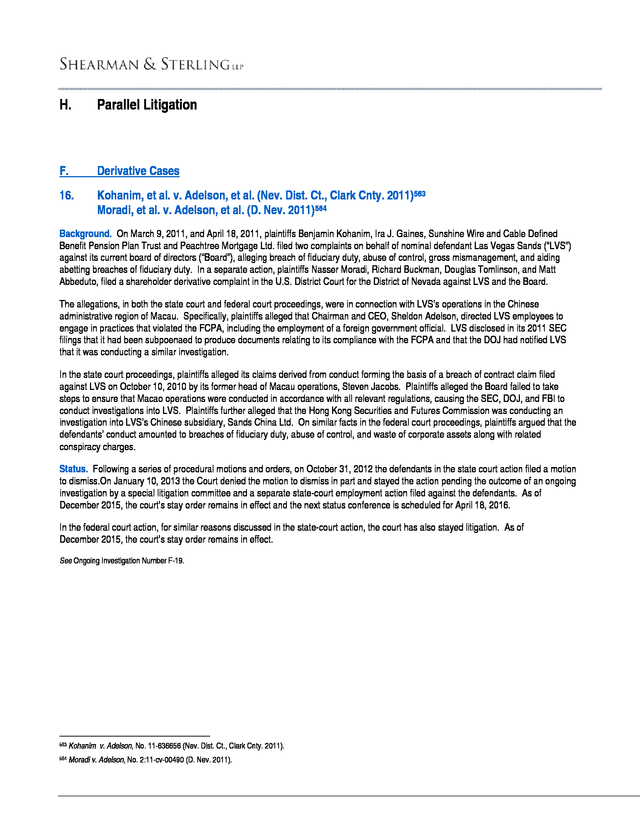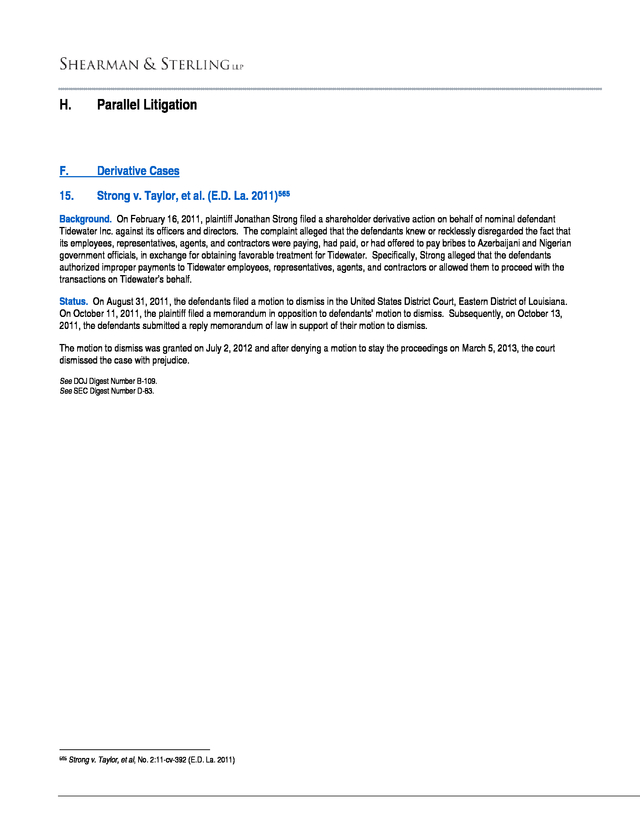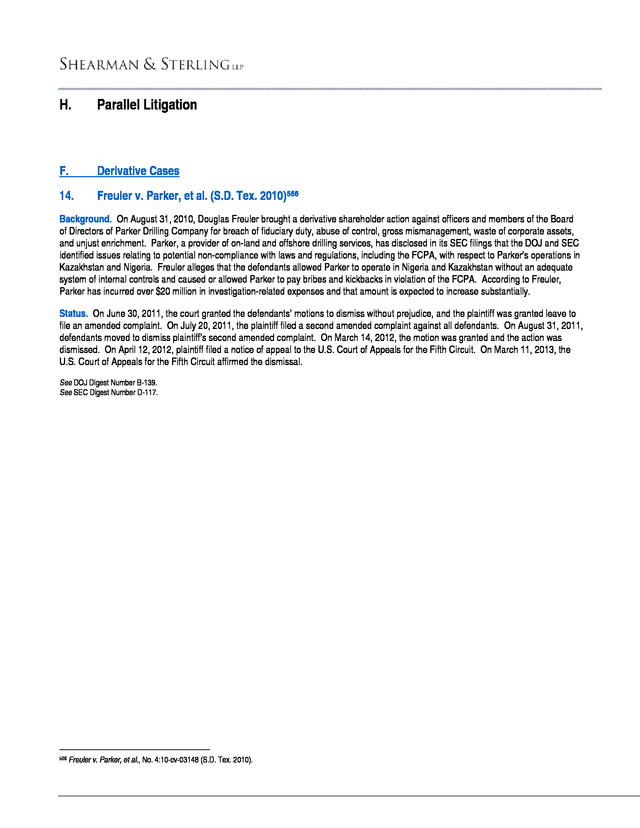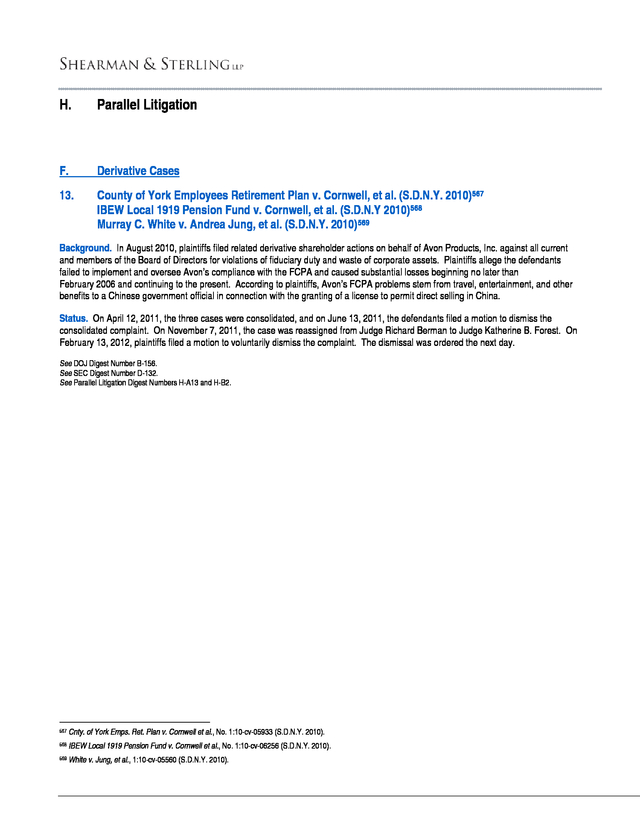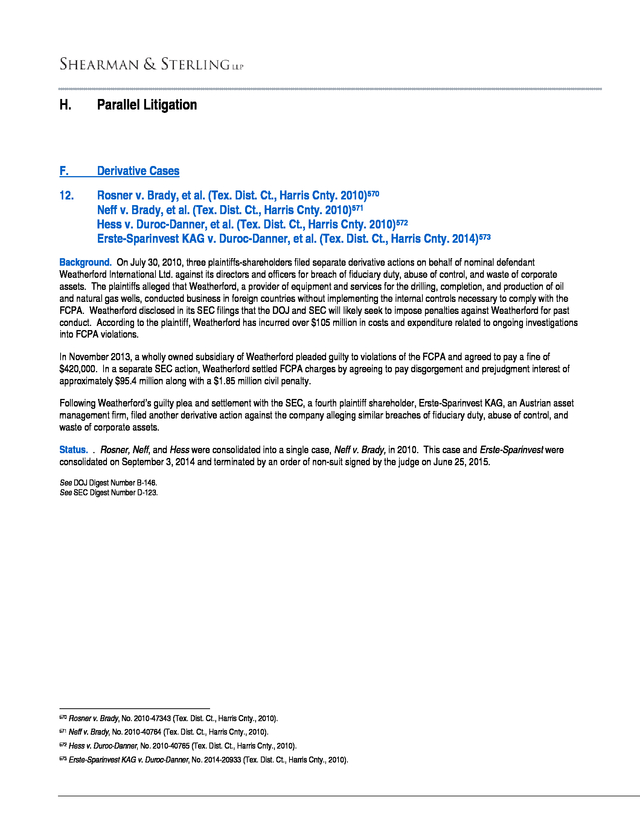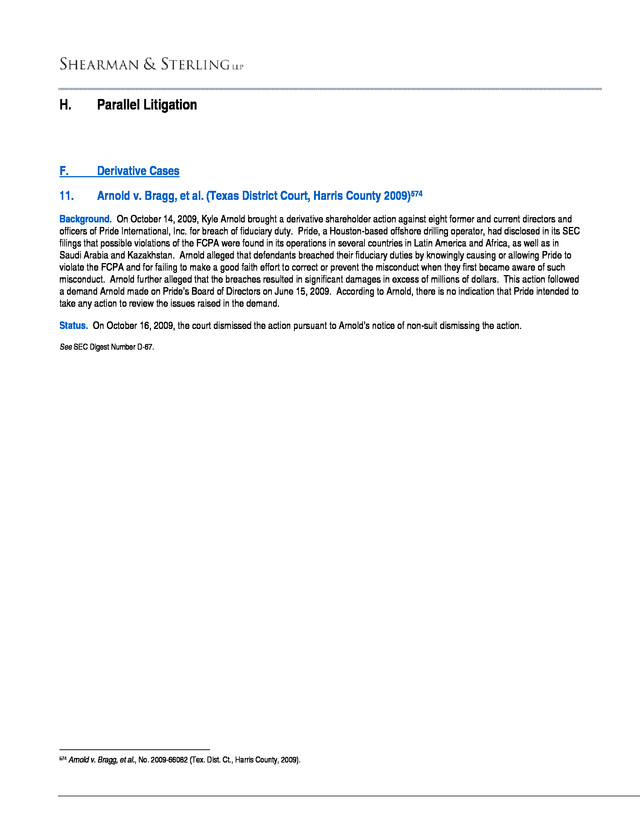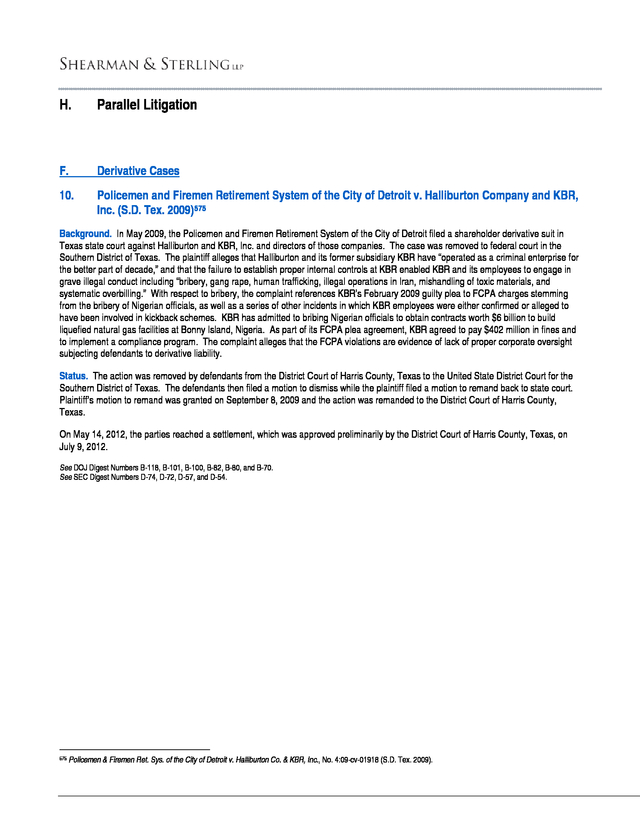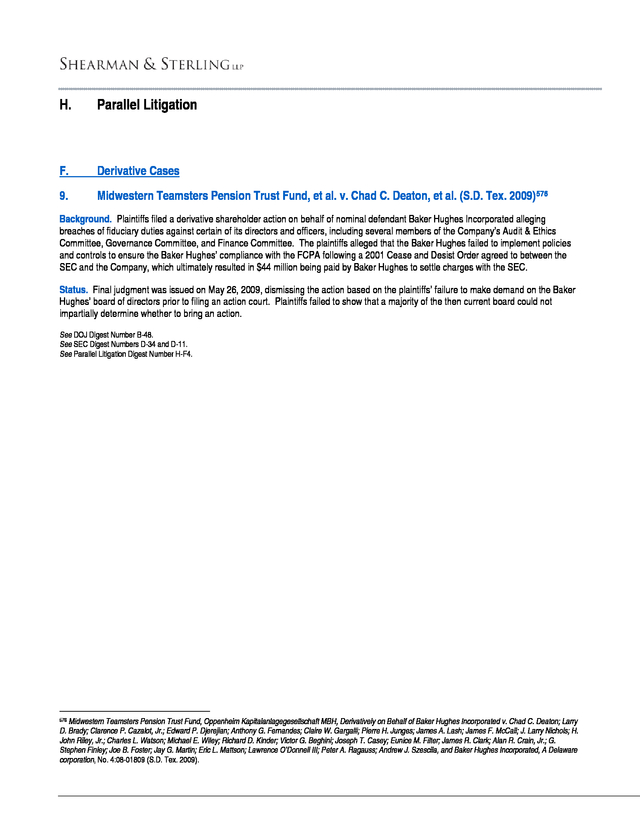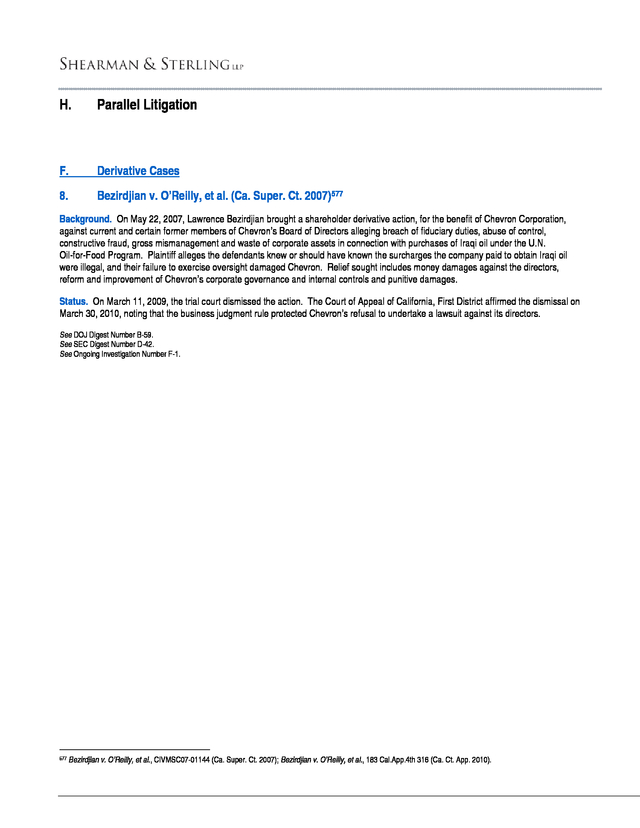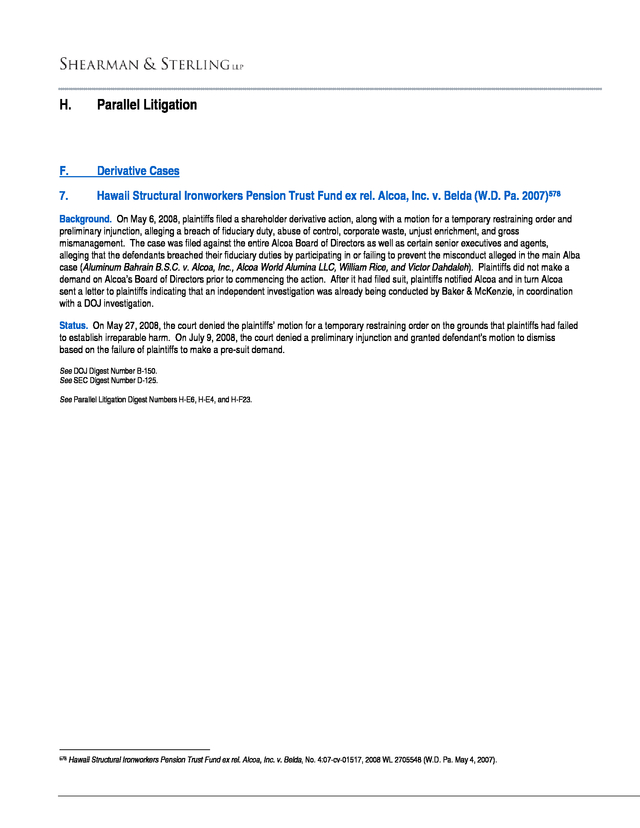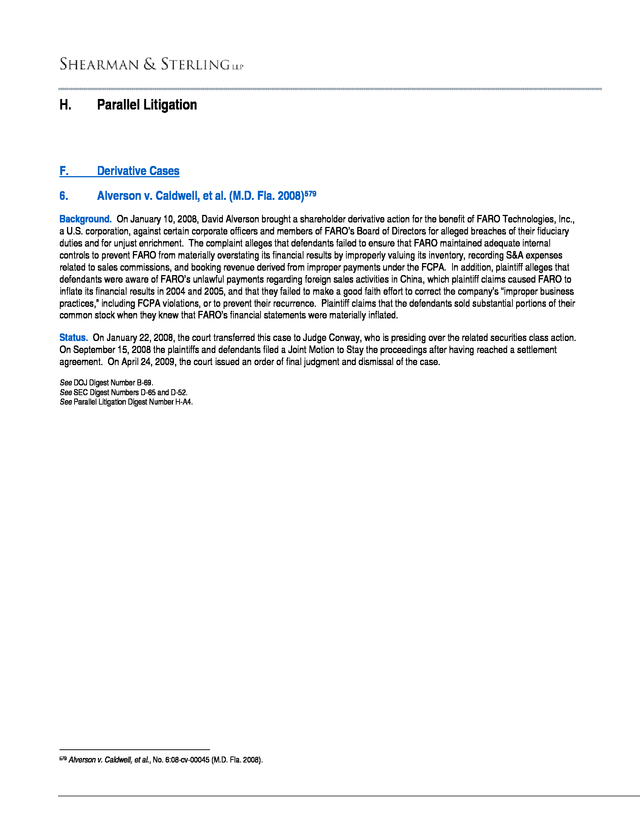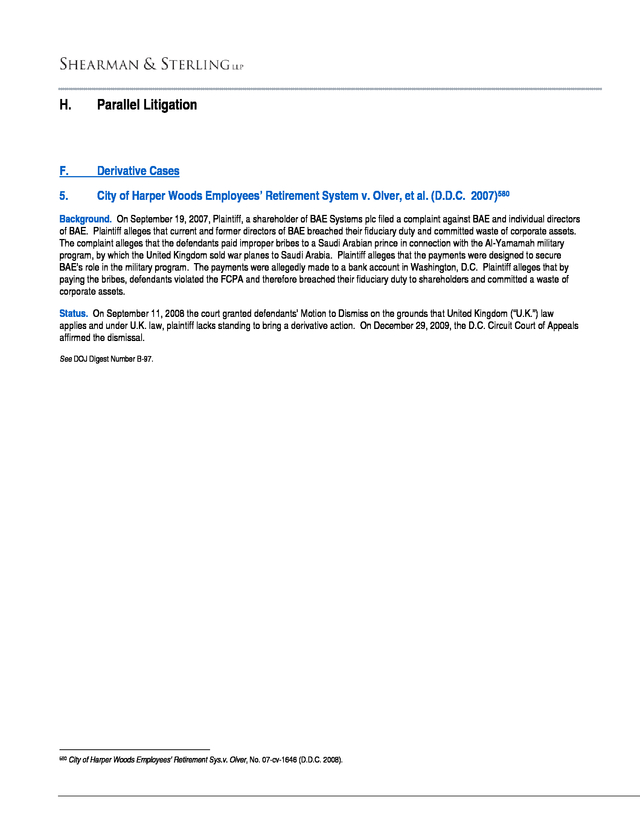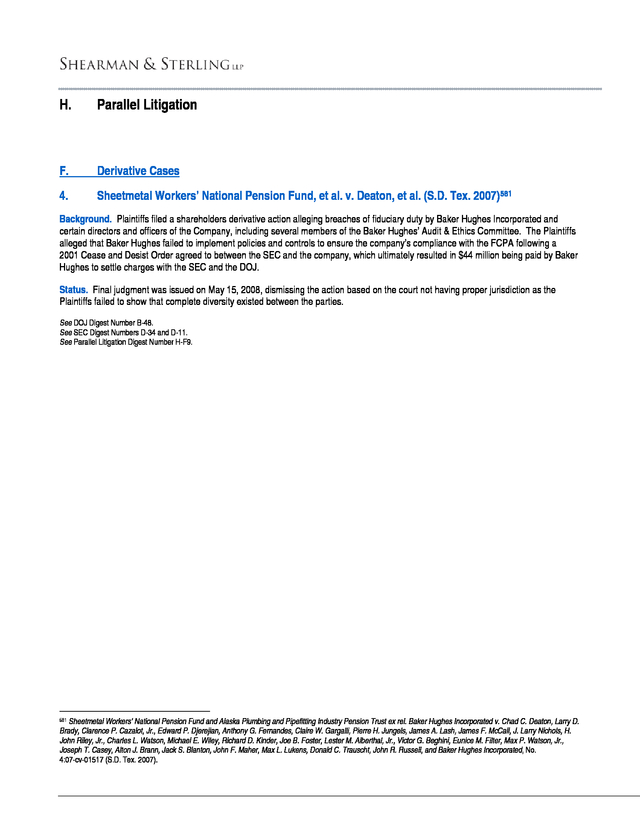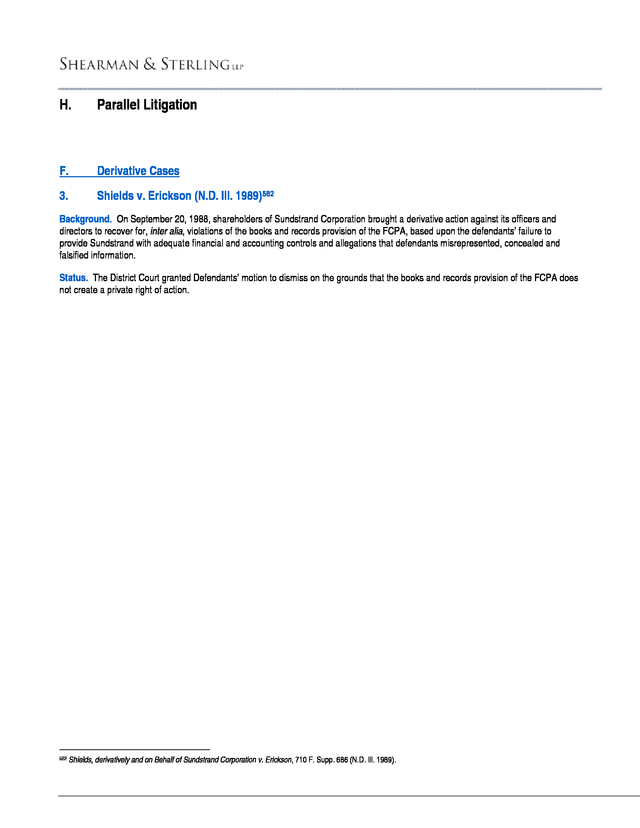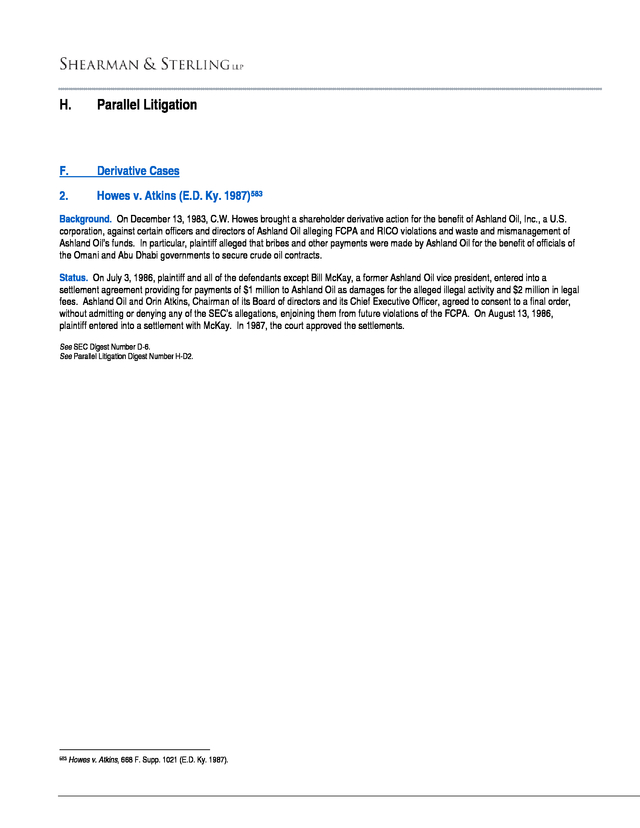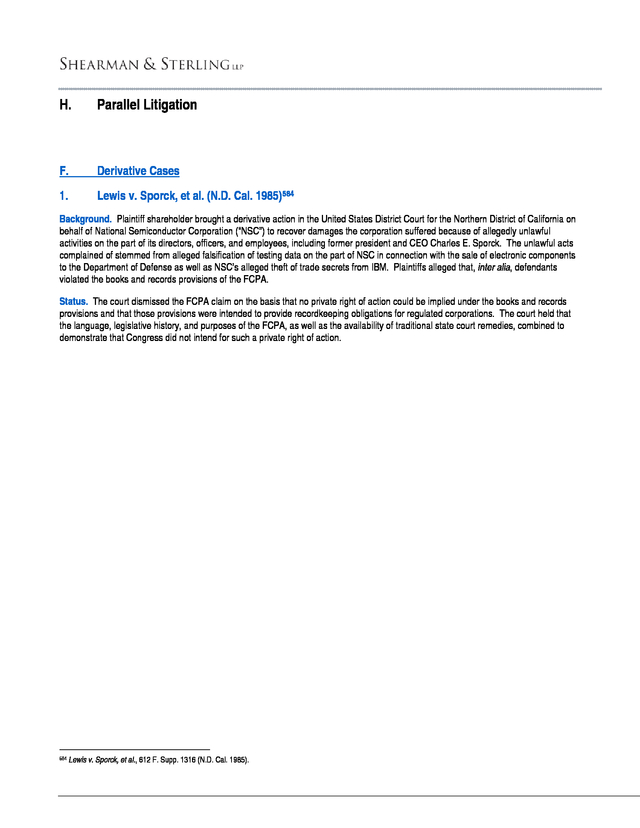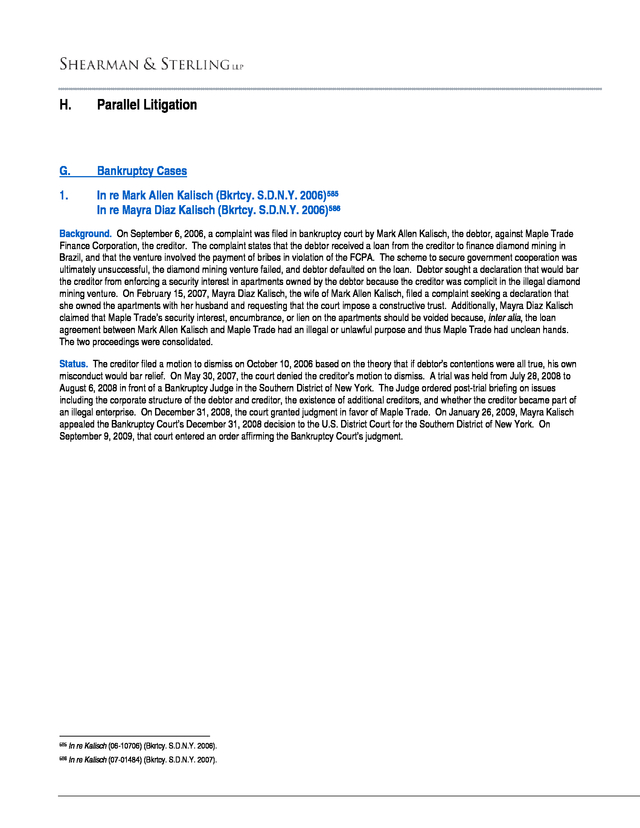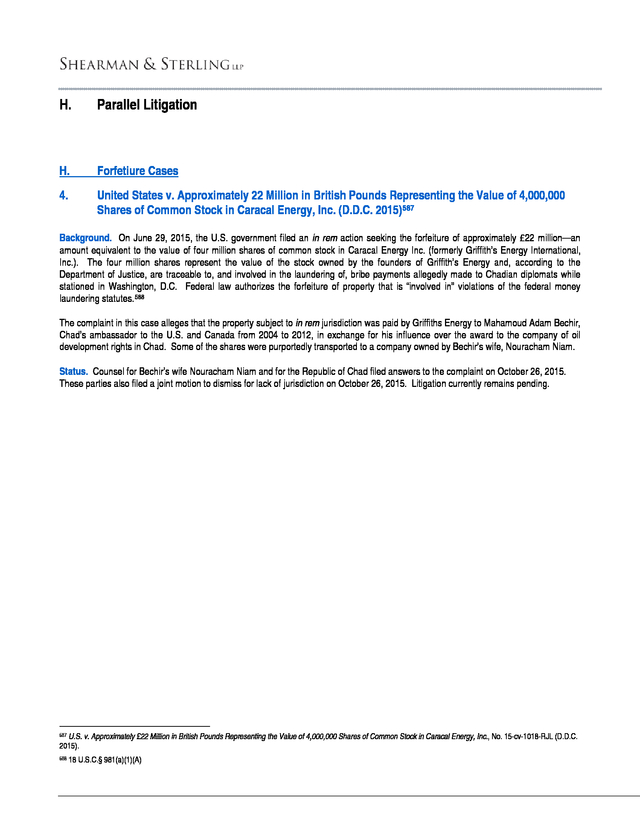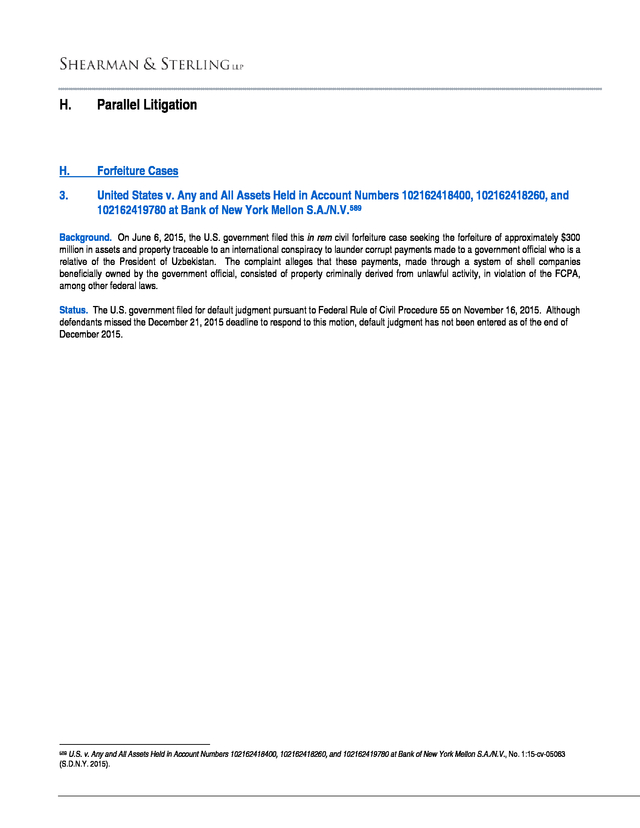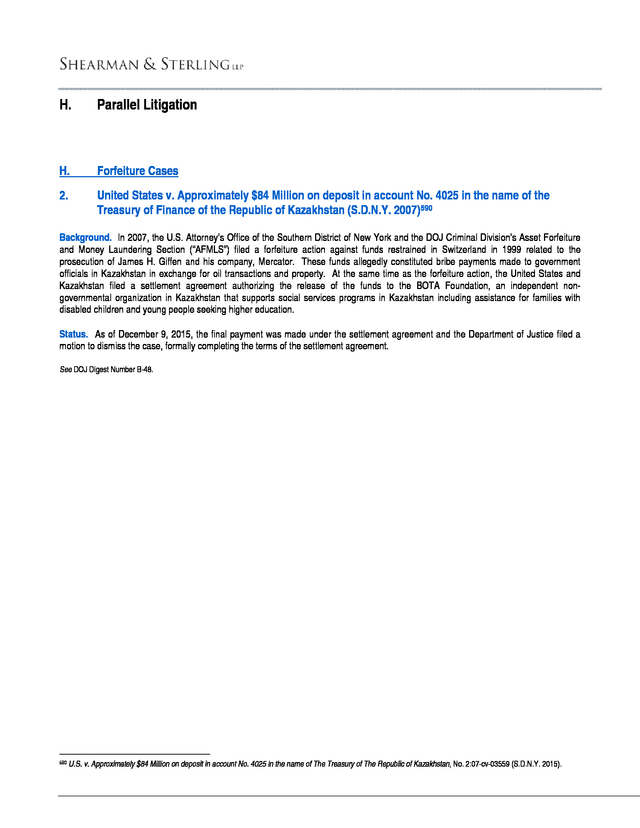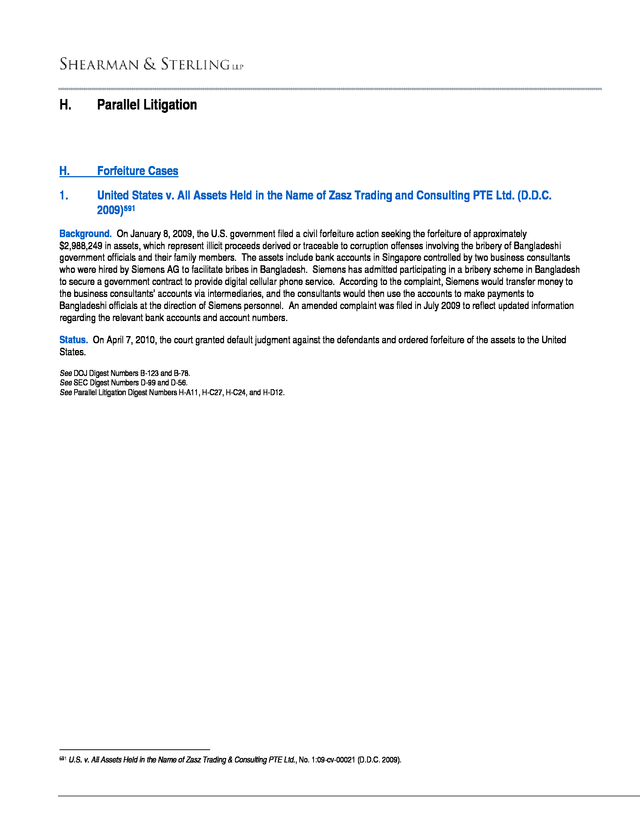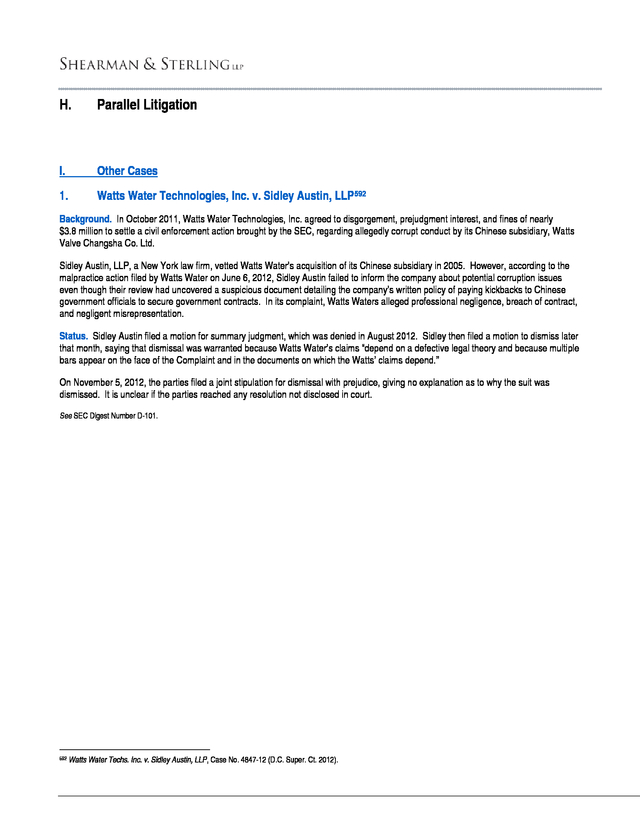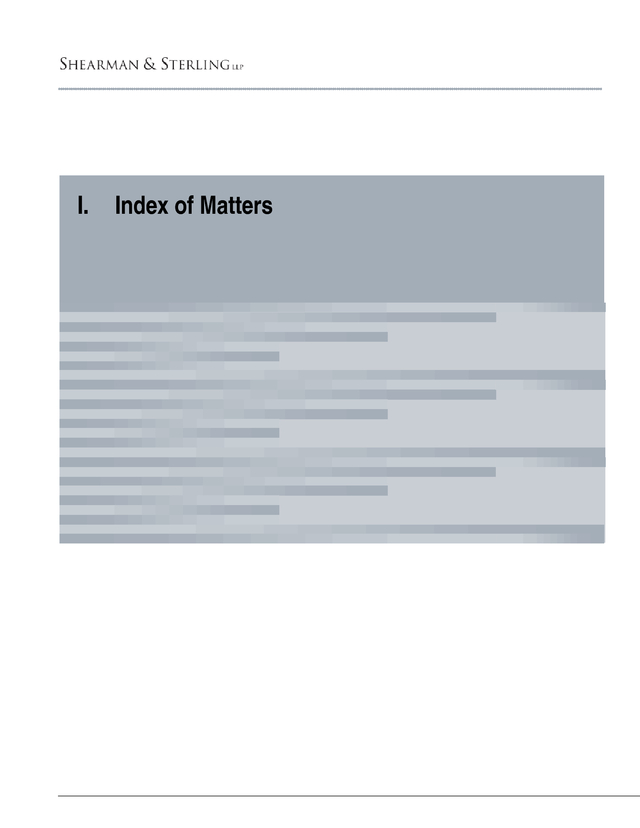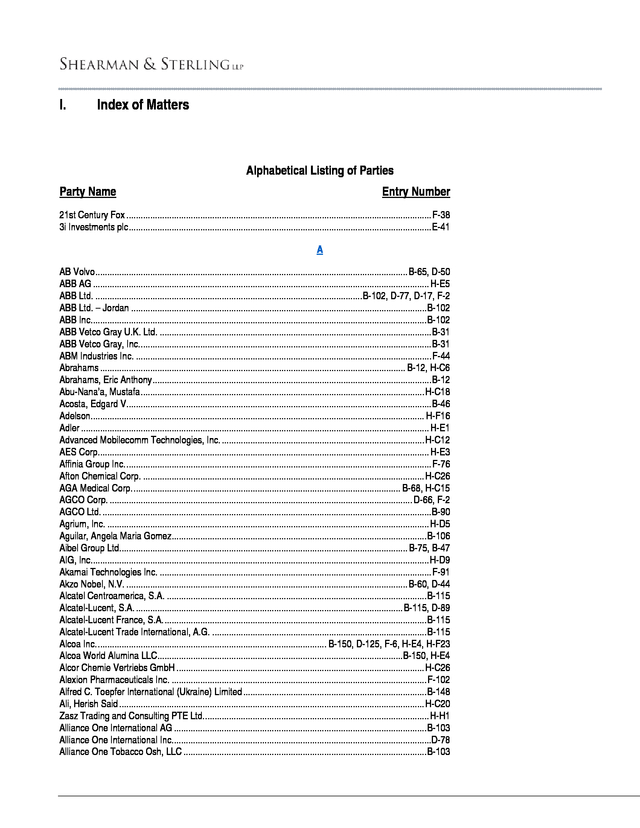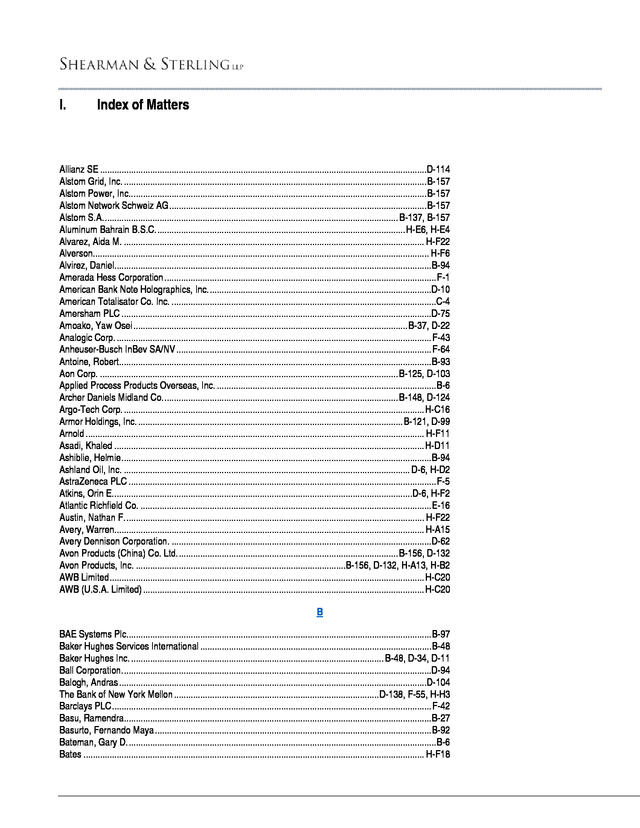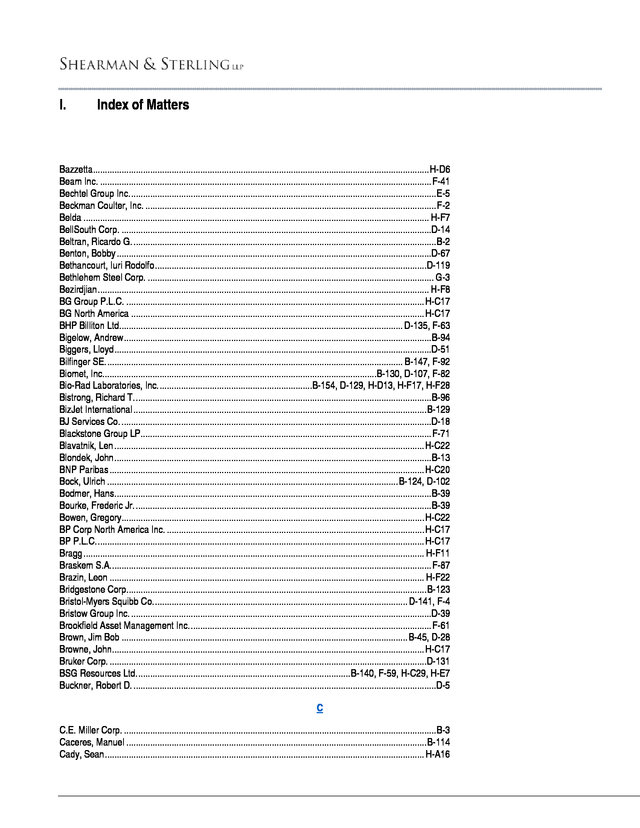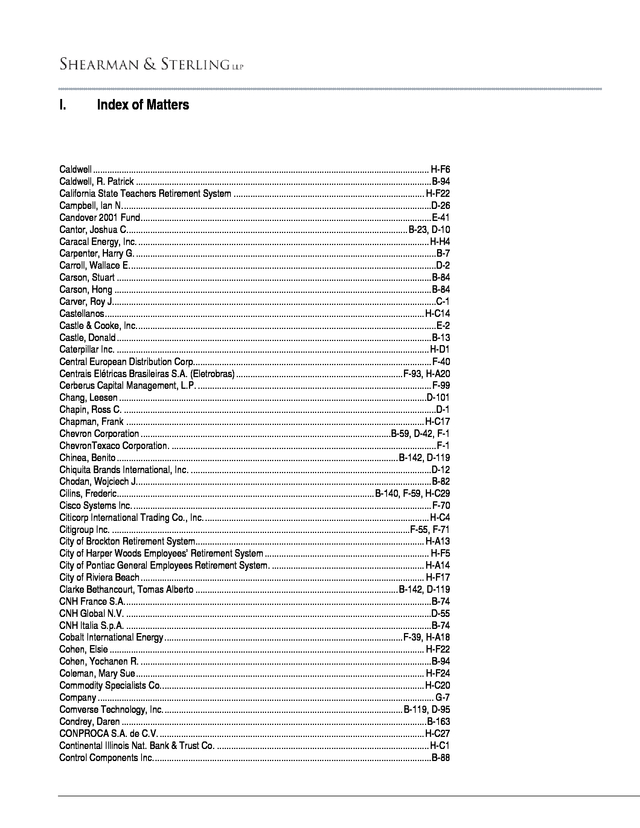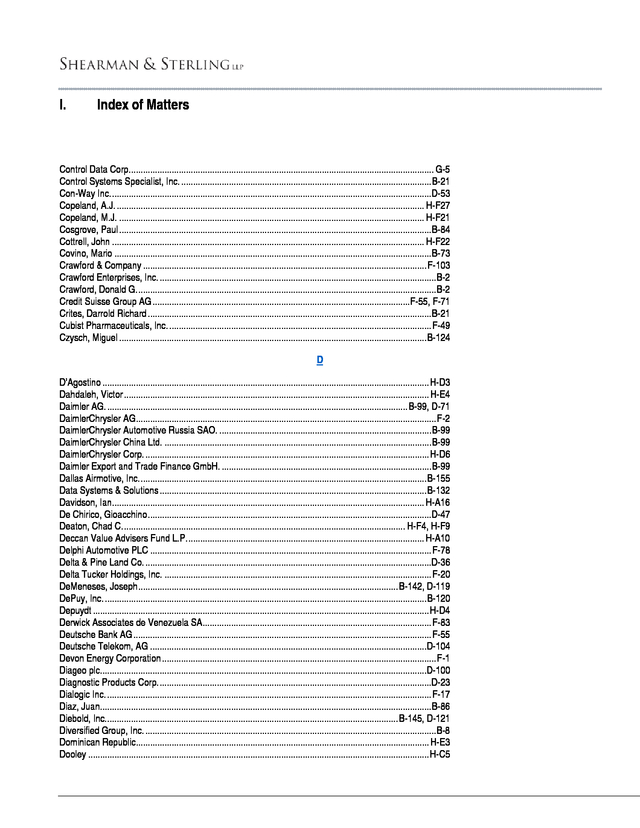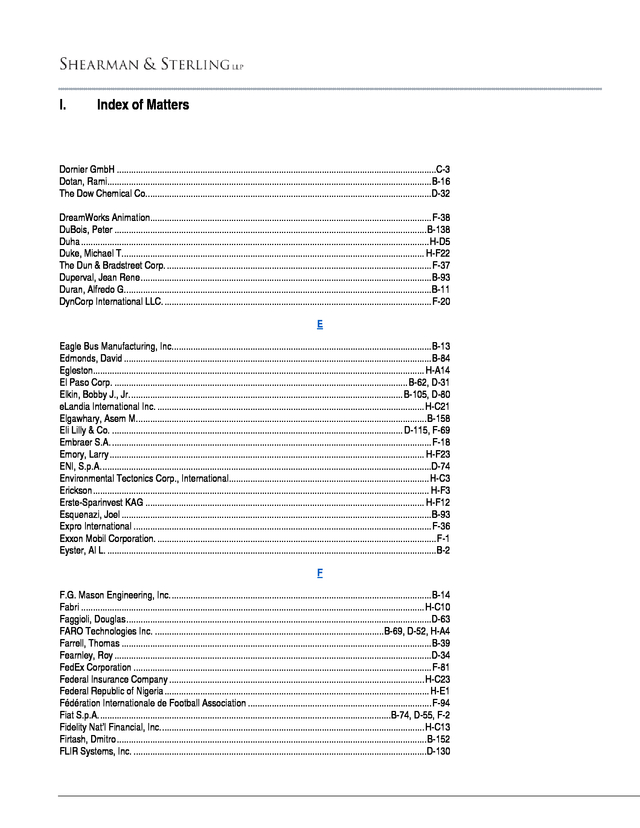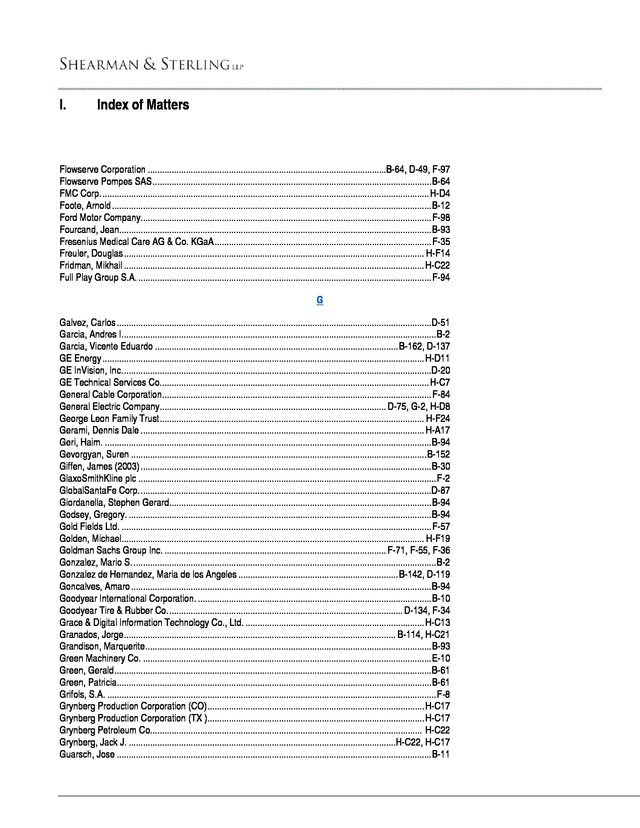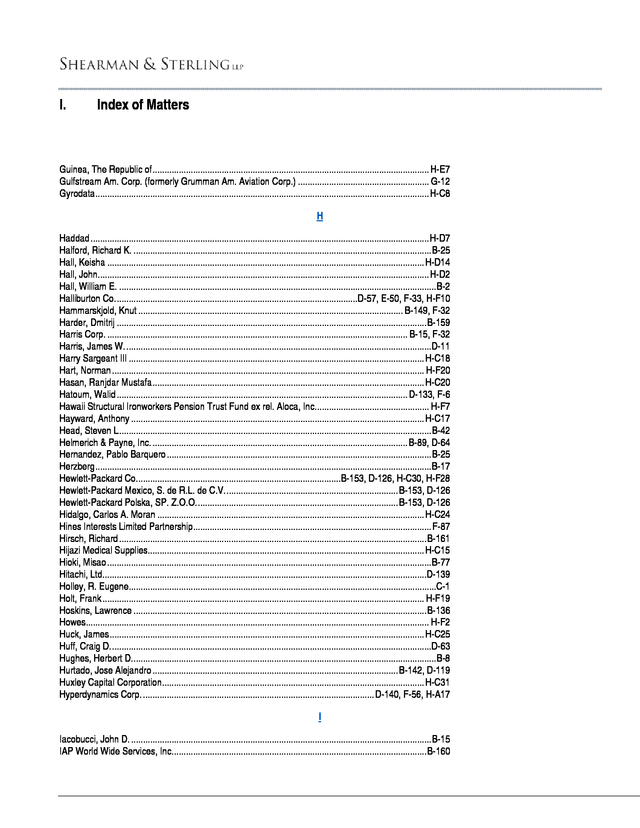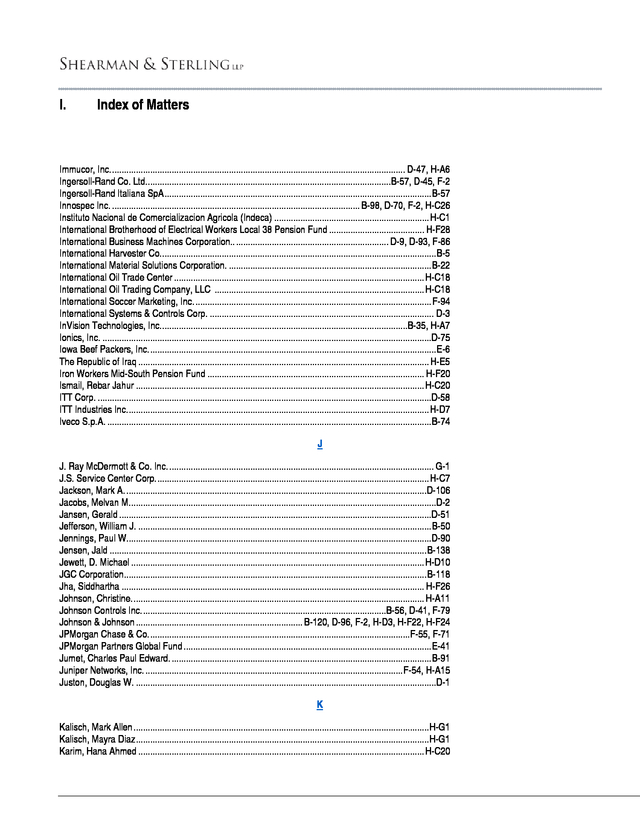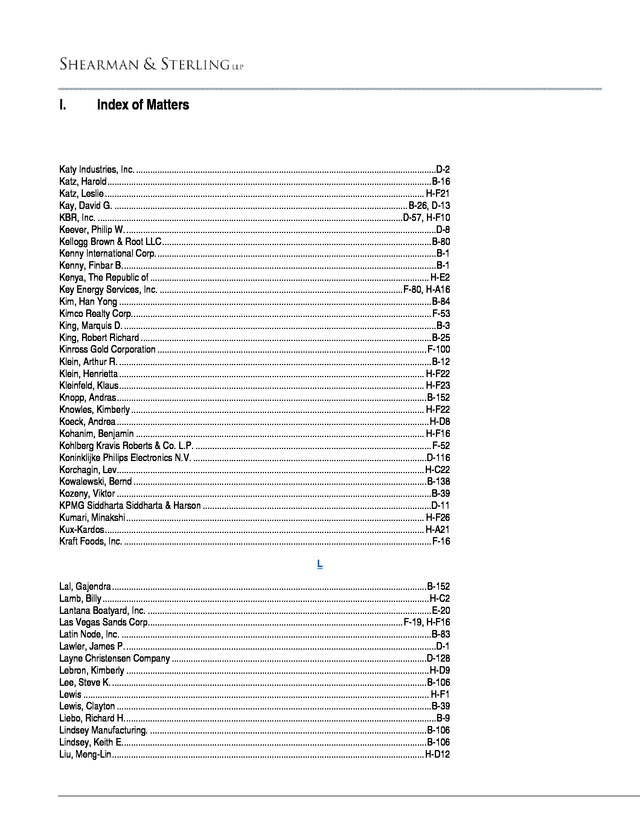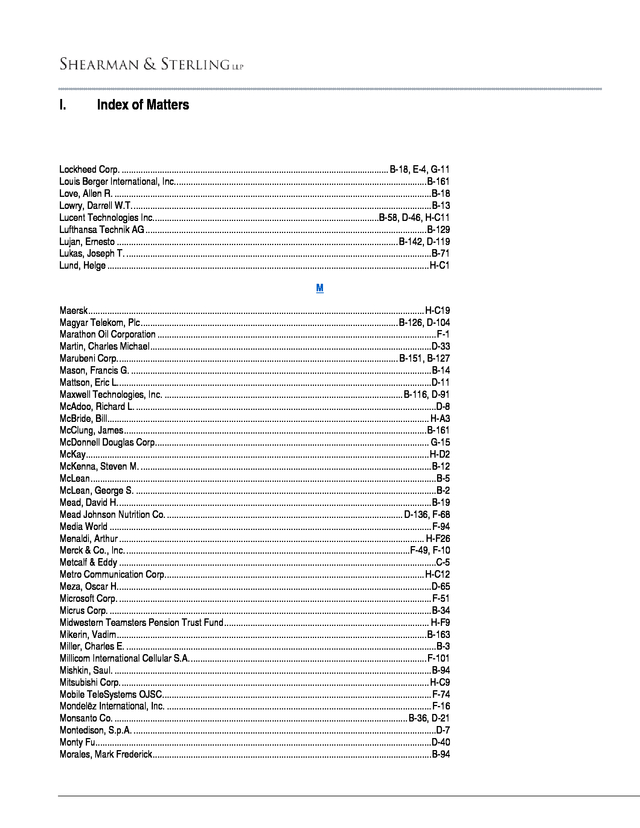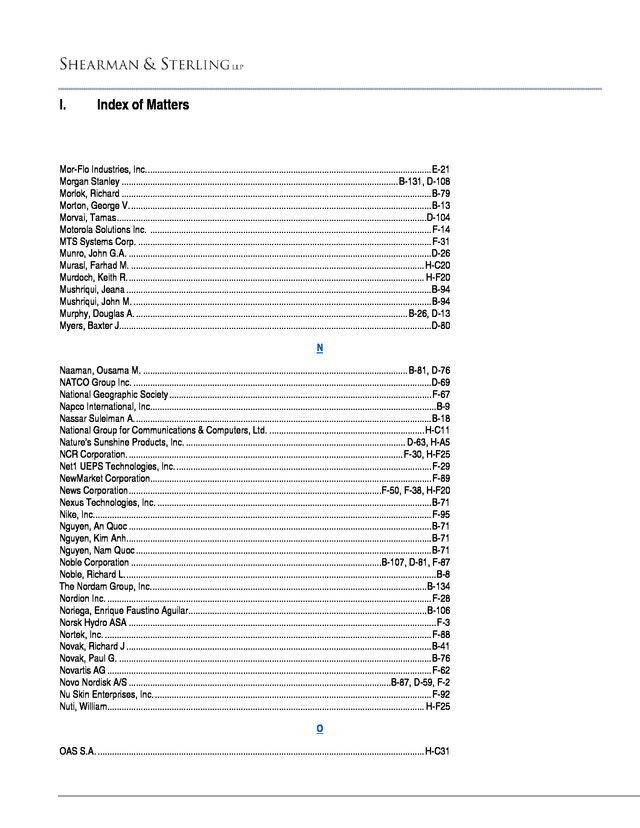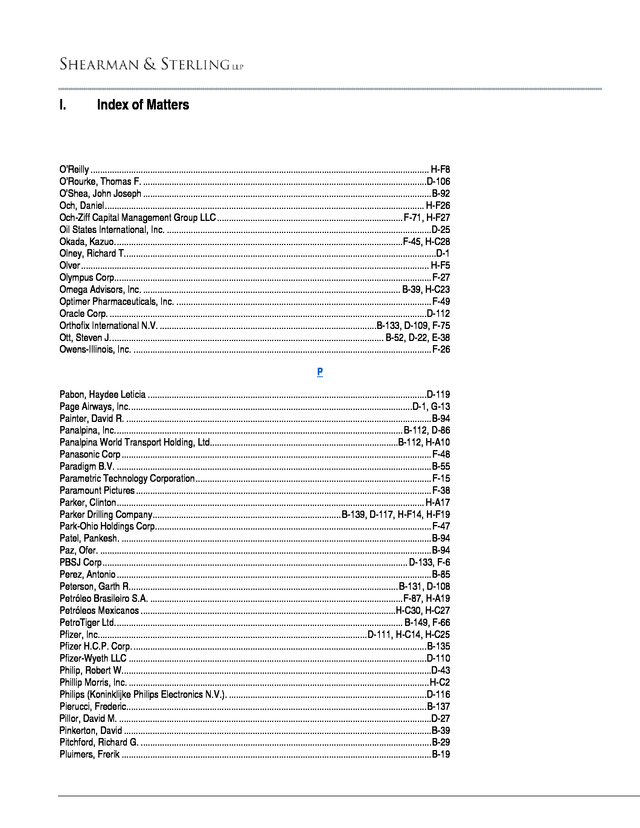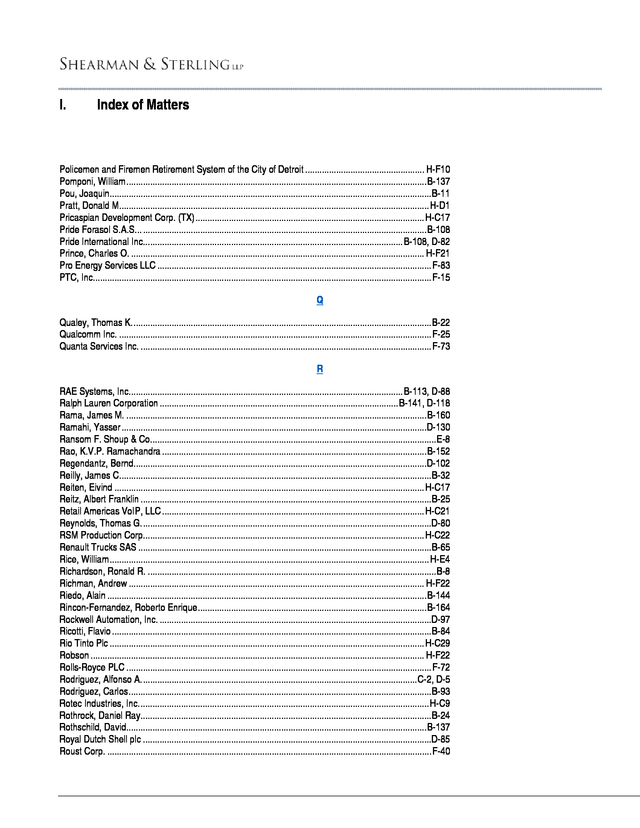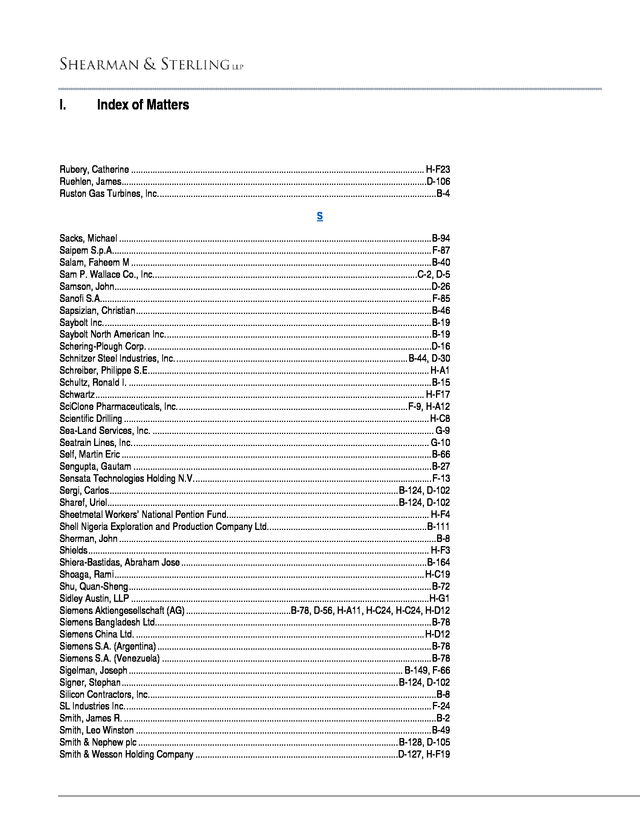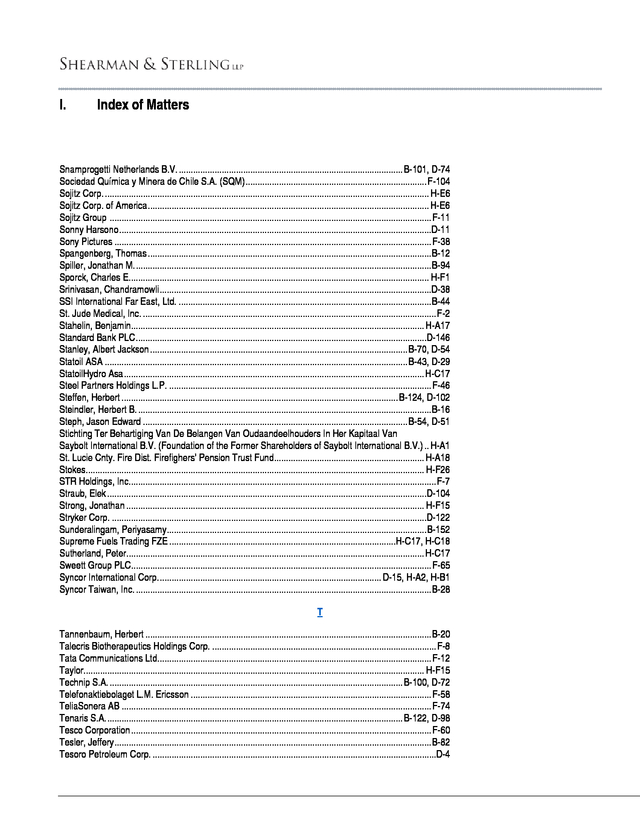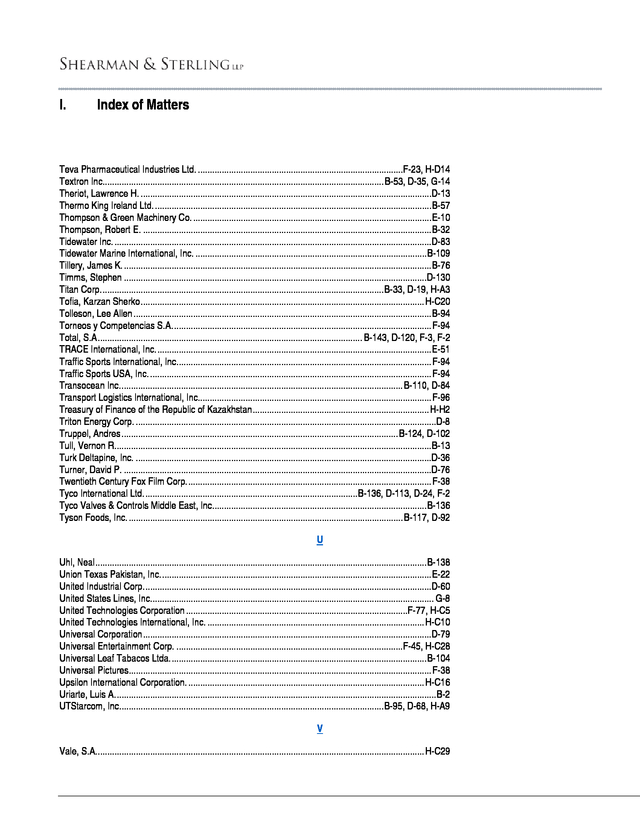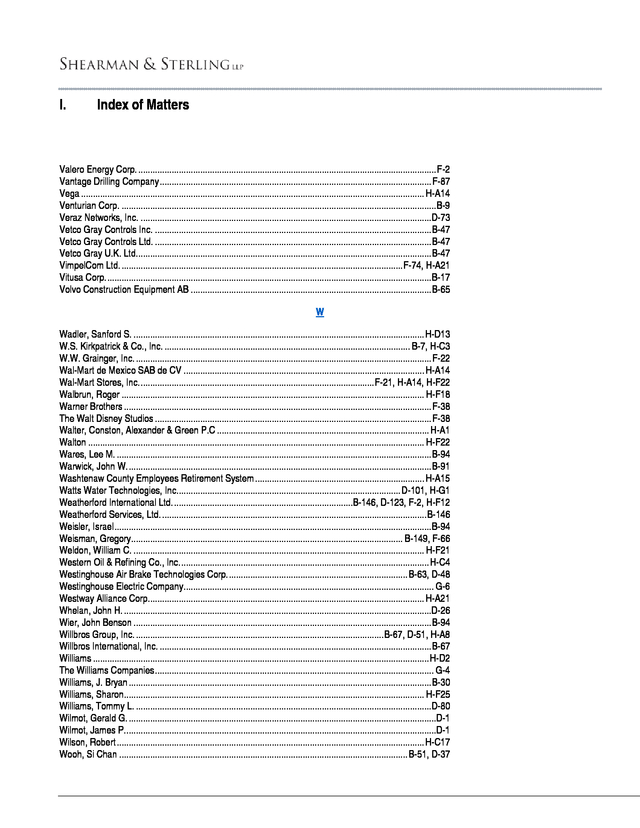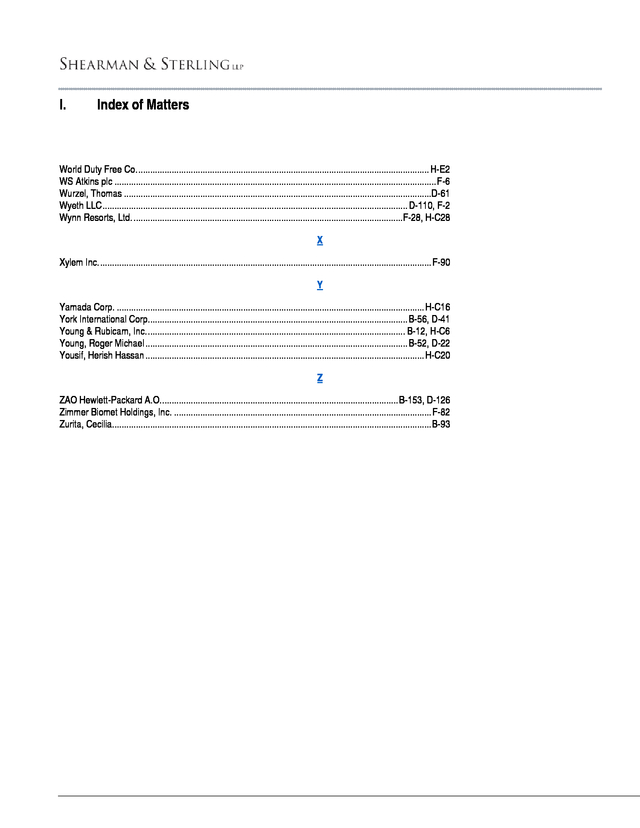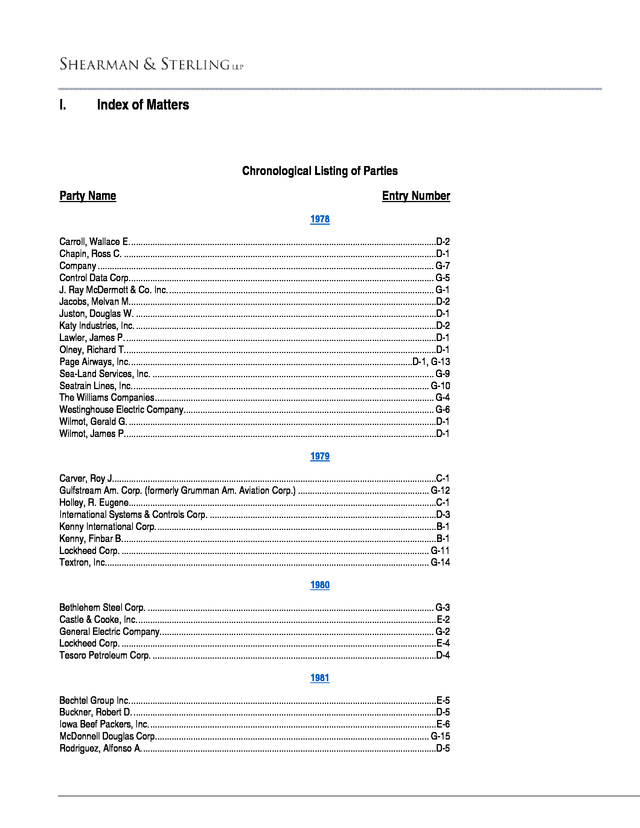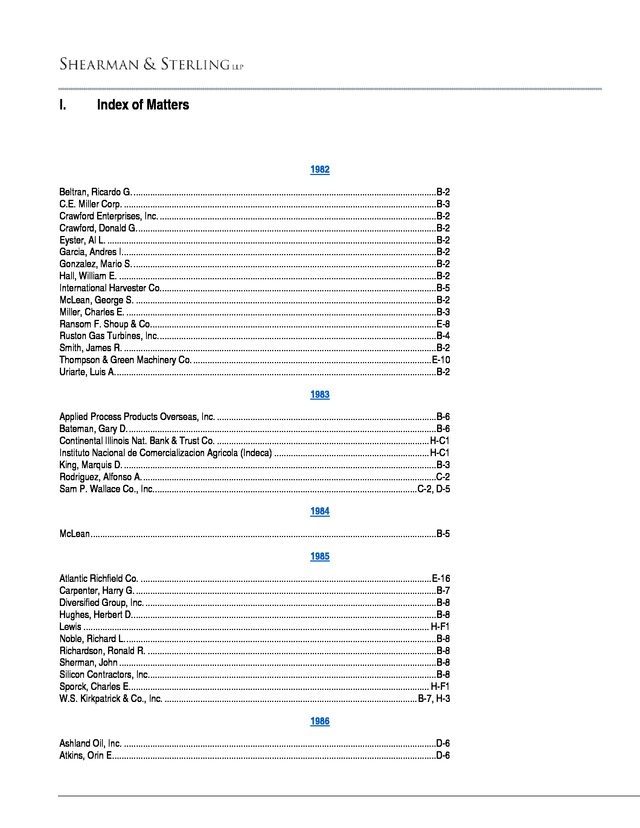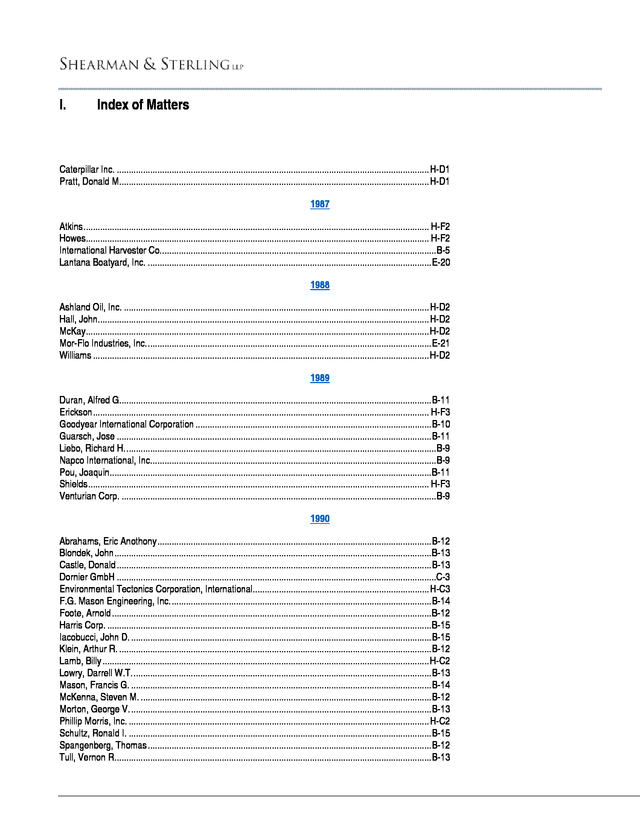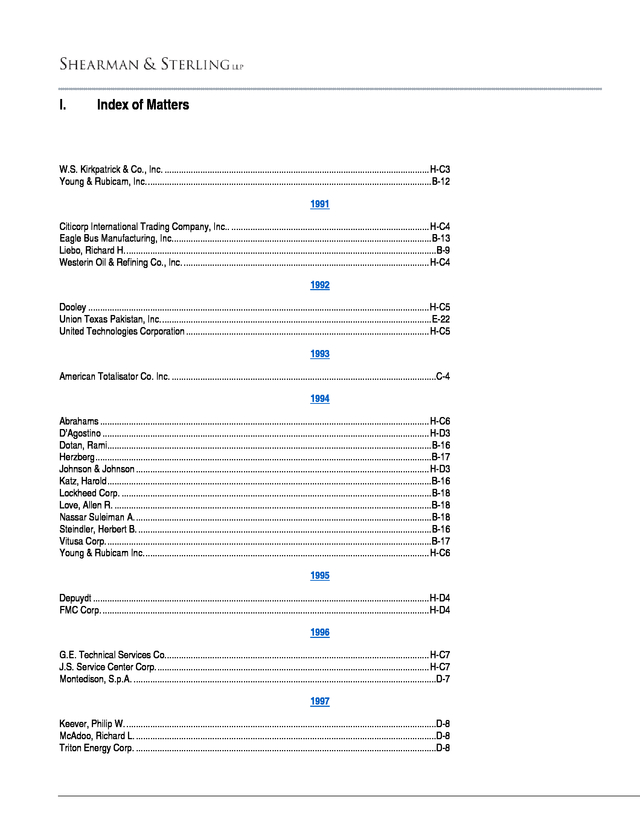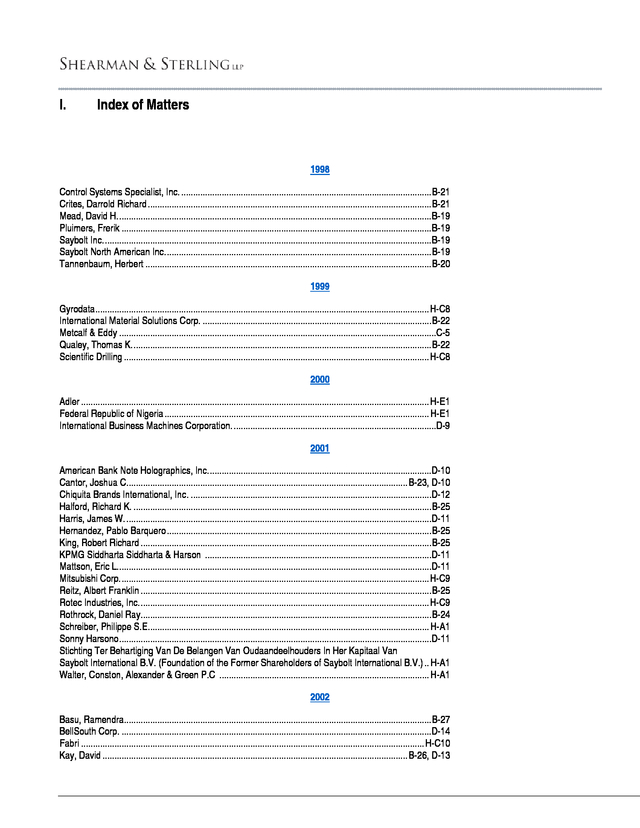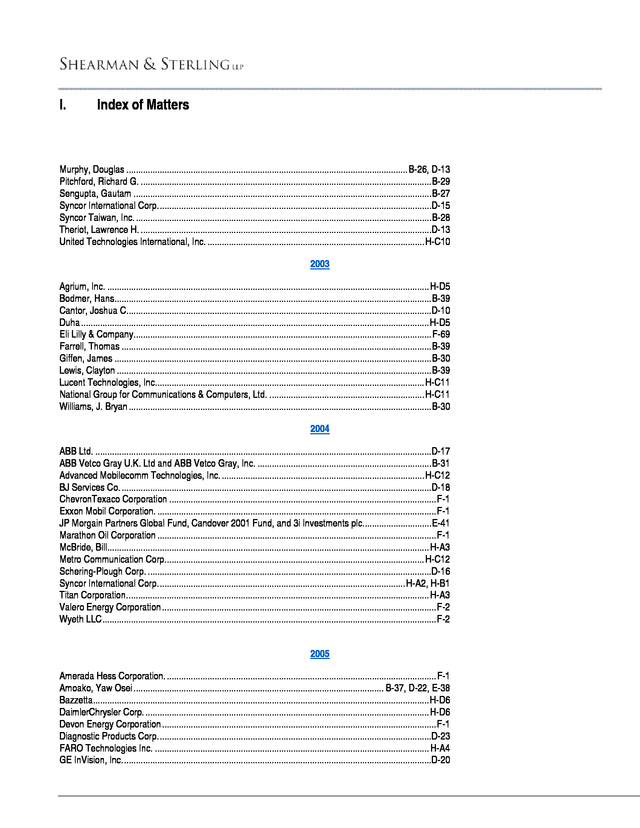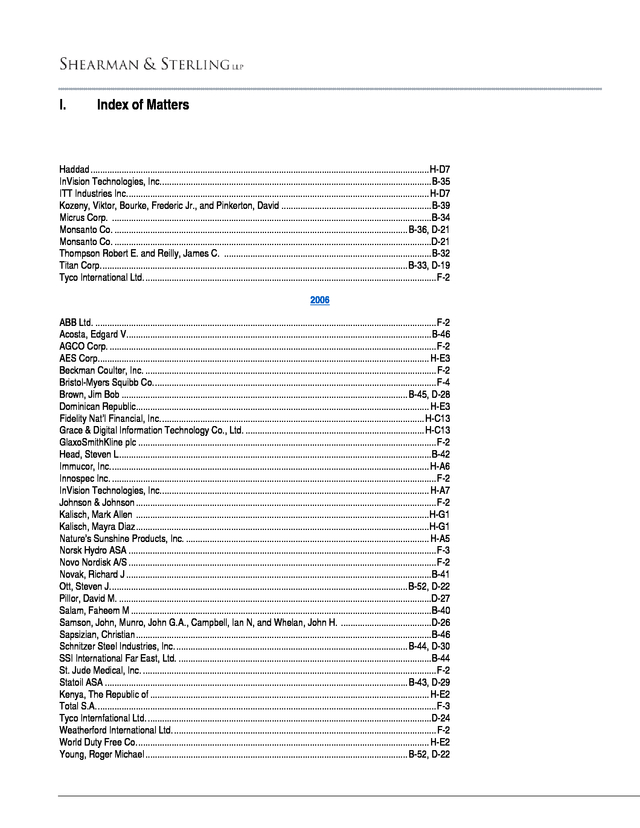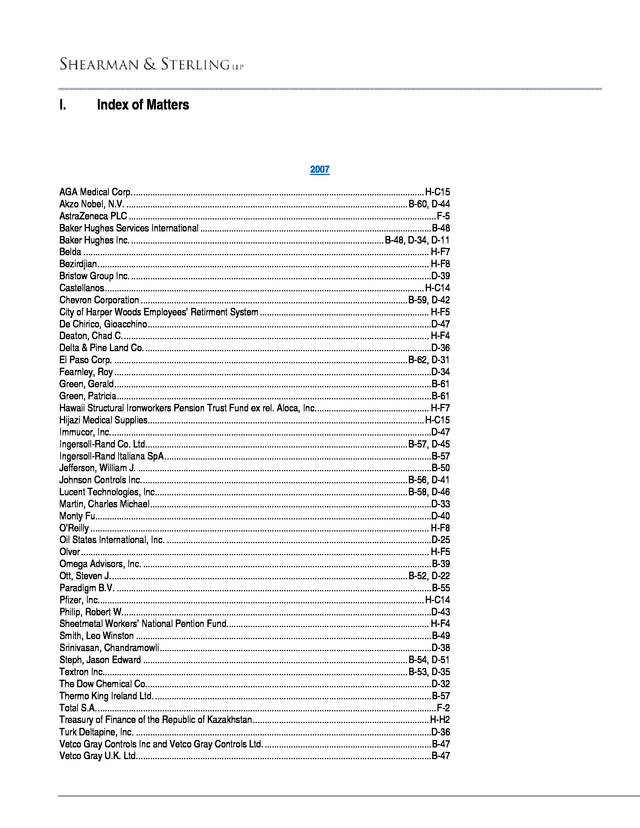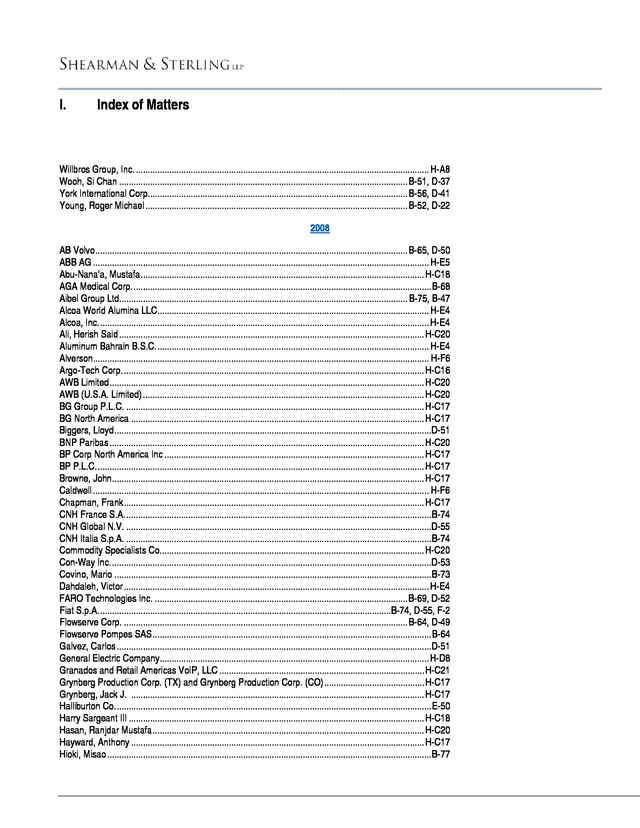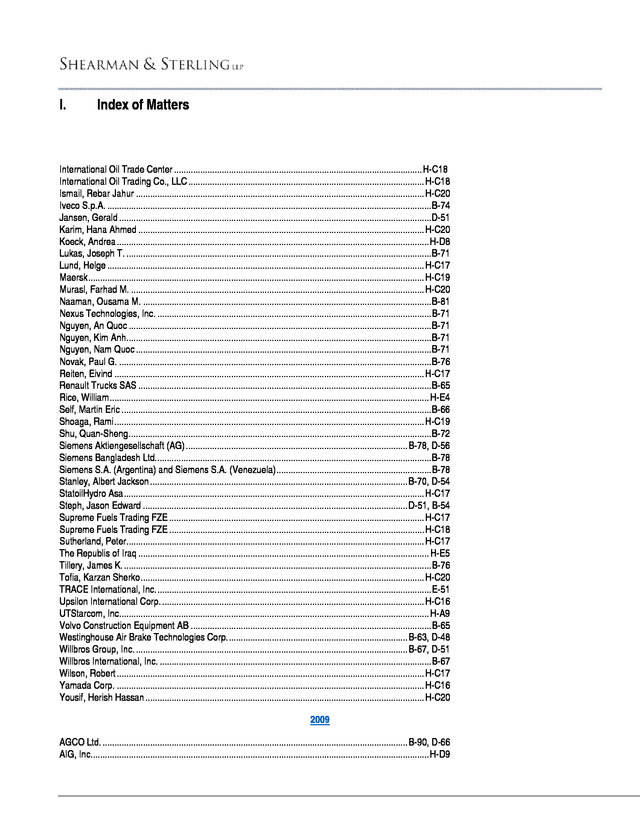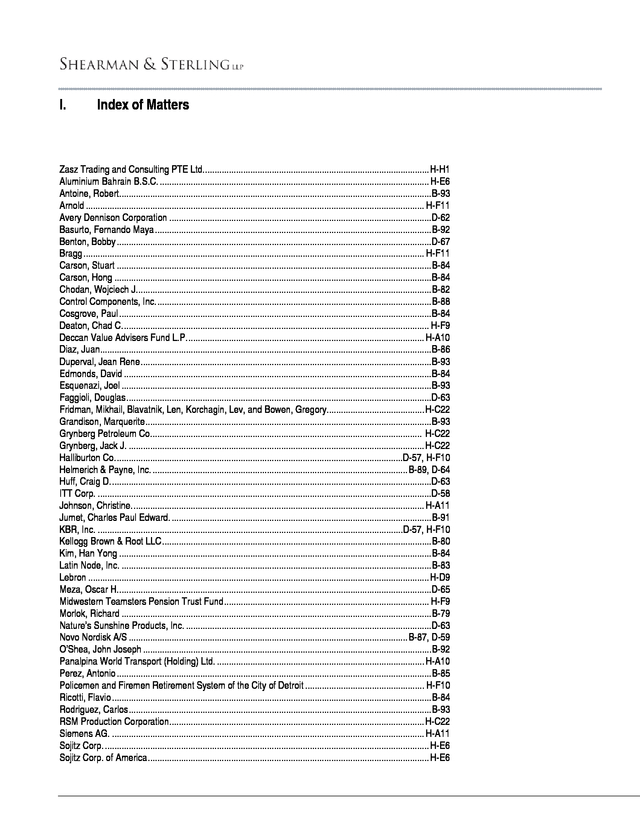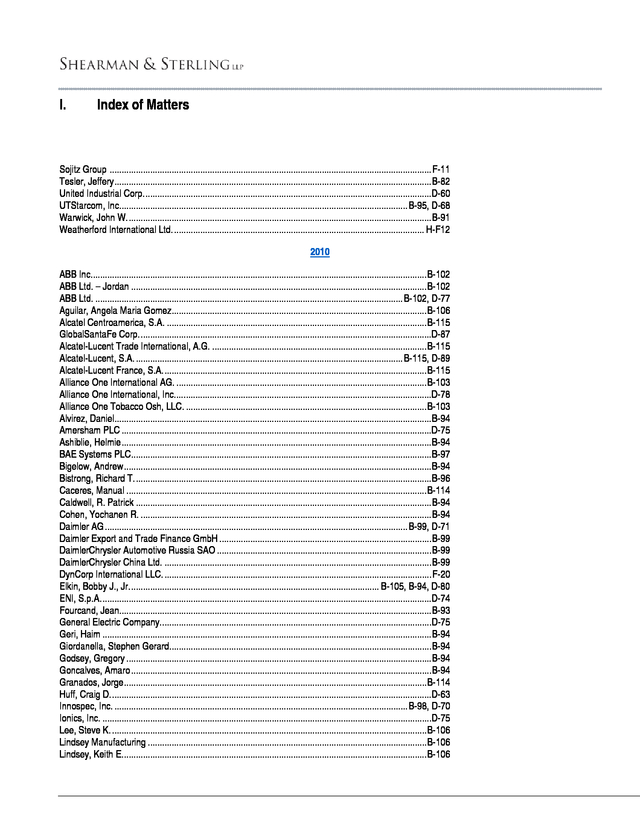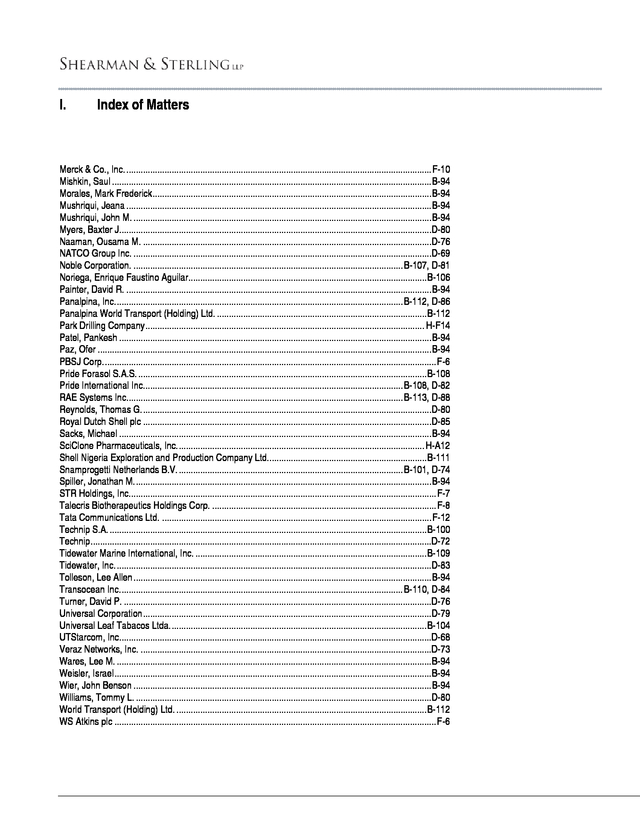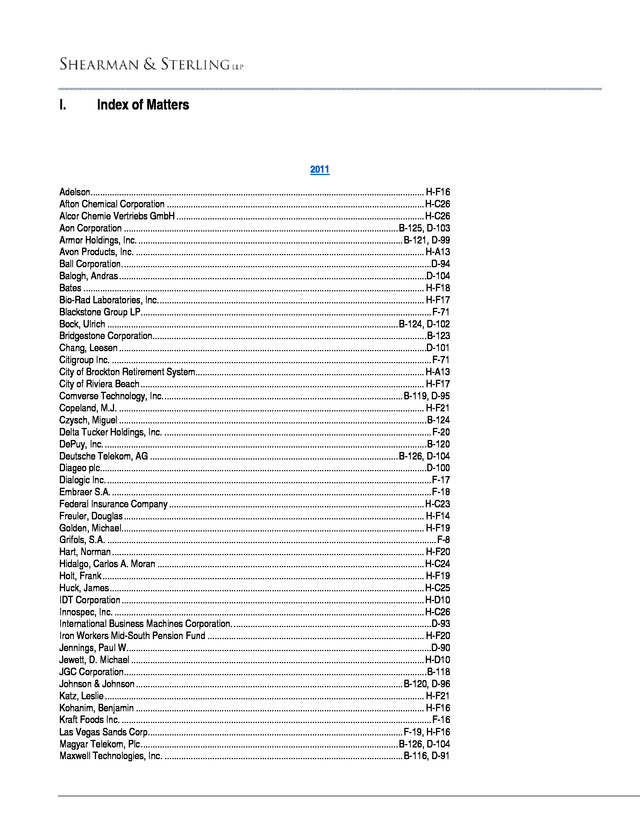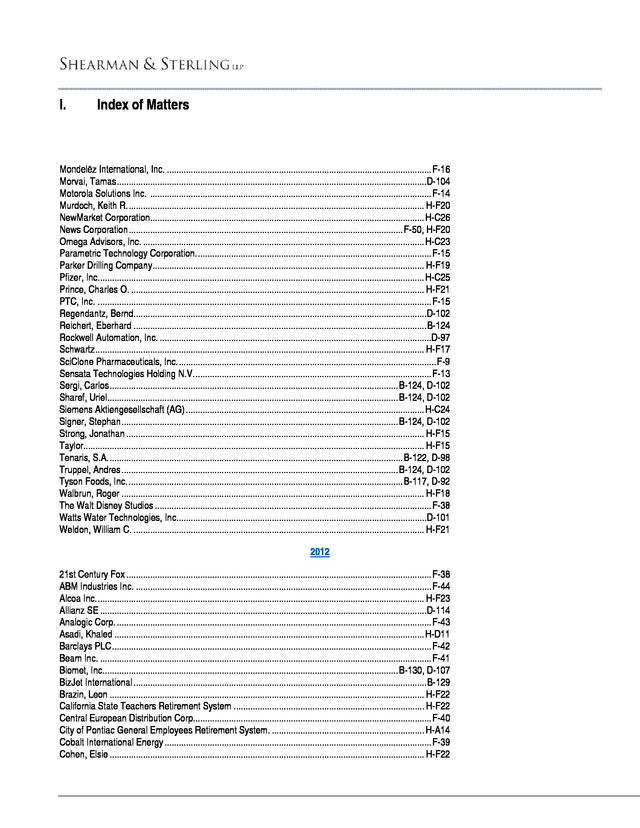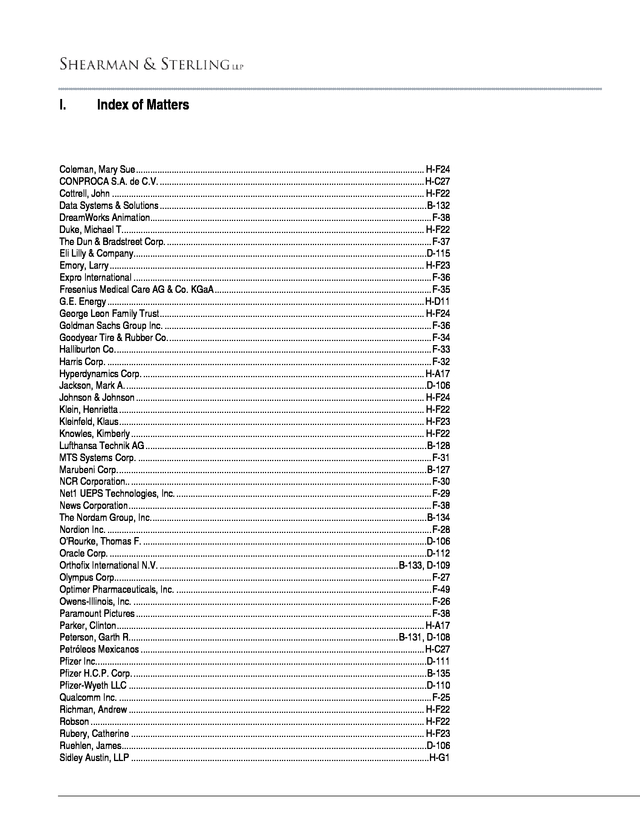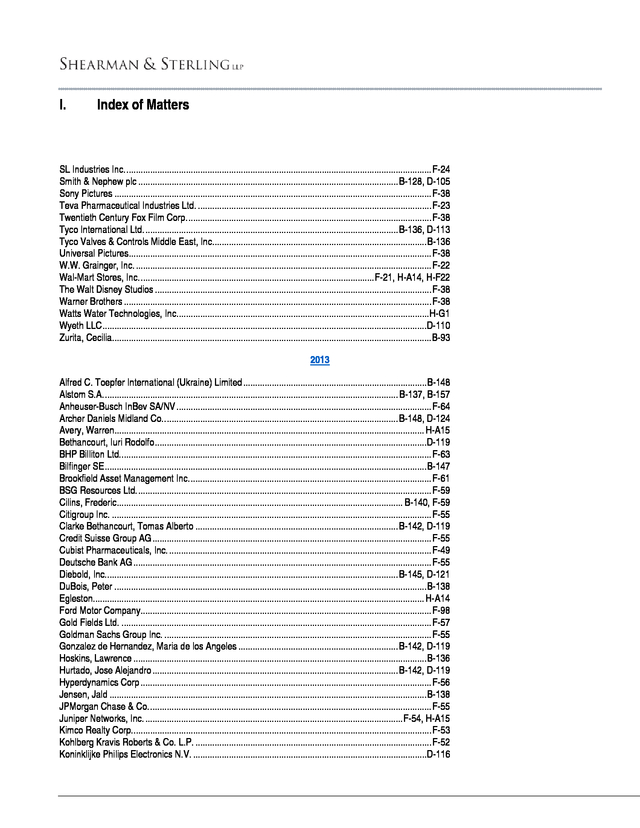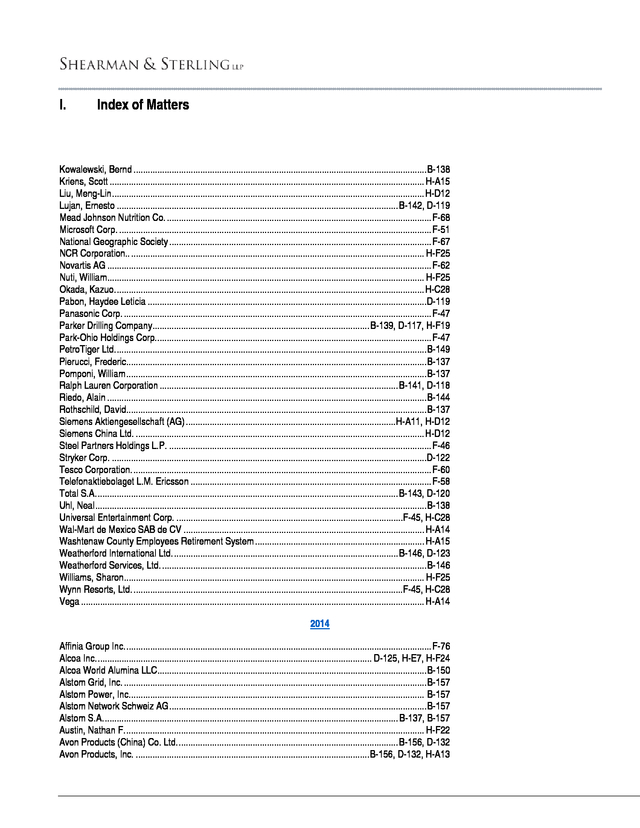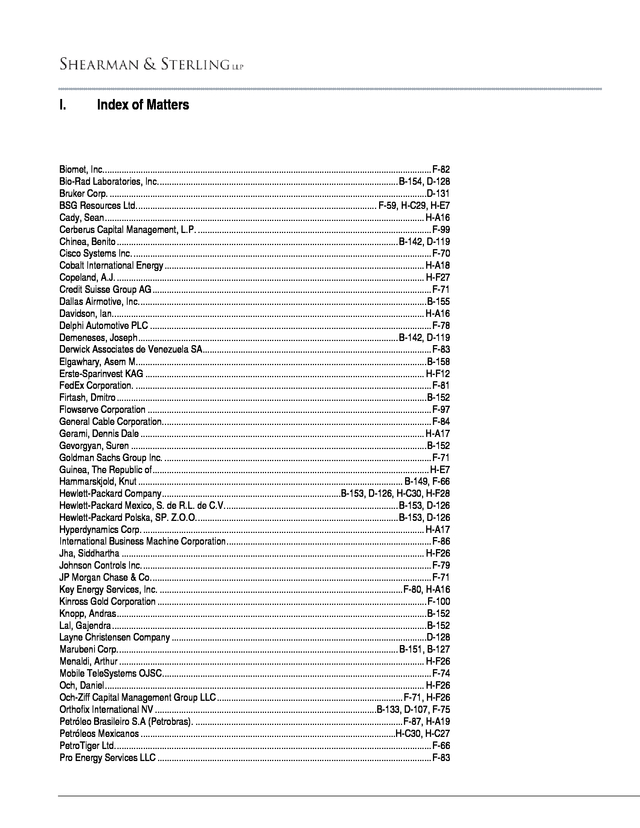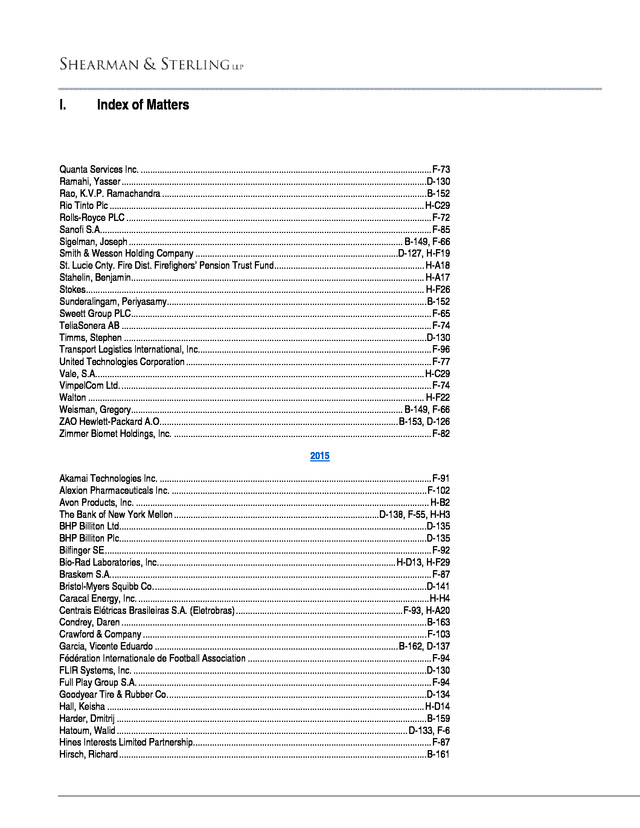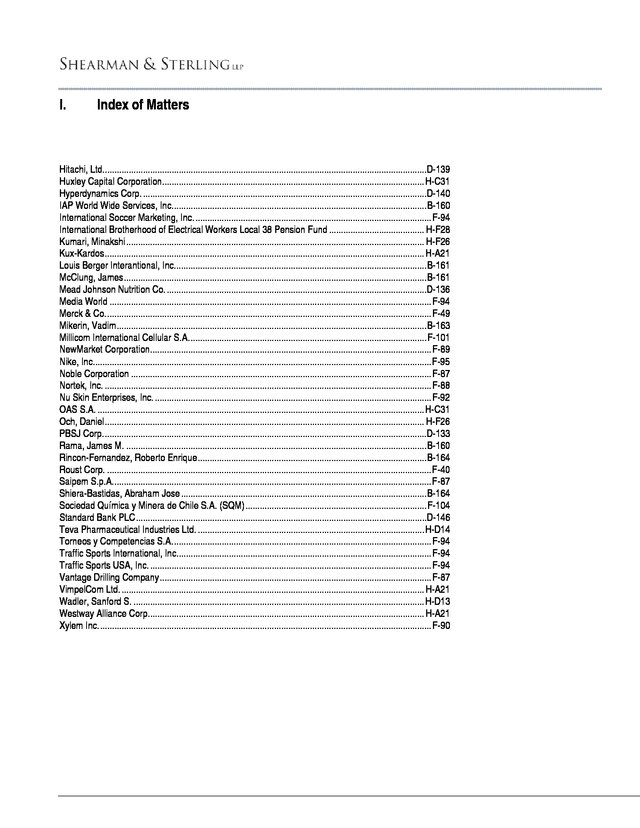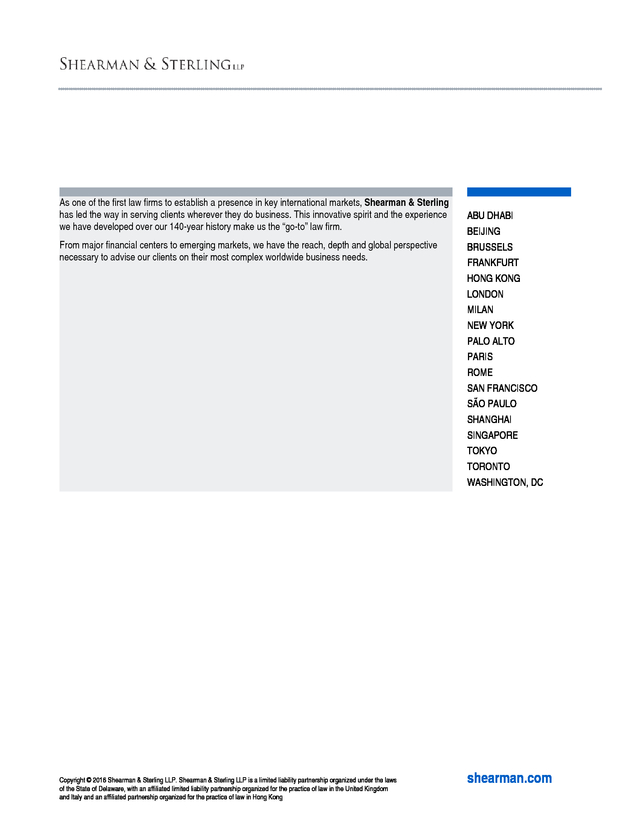Shearman & Sterling's Recent Trends and Patterns in the Enforcement of the Foreign Corrupt Practices Act (FCPA) Digest – January 4, 2016
Shearman & Sterling
Description
FCPA Digest
Cases and Review Releases Relating to Bribes to Foreign Officials
under the Foreign Corrupt Practices Act of 1977
JANUARY 2016
. Editorial Board
Editor In Chief:
Philip Urofsky
Washington, DC
London
+1.202.508.8060
purofsky@shearman.com
Managing Editor:
Zach Torres-Fowler
Contributing Editors:
Alexandra Munson
Digest Contributors:
Daria Anichkova, Avani Bhatt, Laura Caldwell, Johnston Chen, Juliana Clay, Erica Embree, Taylor
Hartstein, Simon Jerrum, Christina Lee, and Jordan Yeagley.
Founding Editor:
Danforth Newcomb
New York
+1.212.848.4184
dnewcomb@shearman.com
Past Contributors:
Jill Aberbach, Andrew Agor, Carolyn Bannon, Joseph Barden, Rachel Barnes, Jessica Bartlett, Zach Bench,
Paige Berges, Alexis Berkowitz, Parth Chanda, Jeannetta Craigwell-Graham, Erzulie Cruz, Bryan Dayton,
Maureen Dollinger, Kwame Dougan, Saamir Elshihabi, Teddy Flo, Helena Franceschi, Andrew Giddings,
Chris Glenn, Melissa Godwin, Helene Gogadze, Josh Goodman, Amanda Gossai, Mayer Grashin,
Christopher Greer, William Hauptman, Pasha Hsieh, Andrew Huang, Joshua Johnston, Meaghan Kelly,
Michael Kieval, Sue Kim, Amanda Kosonen, Michael Krauss, Debra Laboschin, Marlon Layton, Christopher
Le Mon, Grace Lee, Tal Machnes, Natalie Marjancik, Bronwen Mason, Mario Meeks, Hee Won (Marina)
Moon, Kyle Noonan, Mojoyin Onijala, Nicola Painter, Sushila Rao, Judith Reed, Matthew Reynolds,
Jennifer Rimm, Brian Scibetta, Rachel Schipper, Jeena Shah, Drew Shoals, Michael Steinke, Christopher
Trueax, Christian Urrutia, Natalie Waites, Ashley Walker, Molly Webster, Elizabeth Weiss, Gregory Wyckoff,
Andrei Vrabie, and Jung Yoo.
Board of Advisors:
Stephen Fishbein
New York
+1.212.848.4424
sfishbein@shearman.com
Jo Rickard
London
+44.20.7655.5781
josanne.rickard@shearman.com
Paula Howell Anderson
New York
+1.212.848.7727
paula.anderson@shearman.com
Brian Burke
Hong Kong
+852 2978 8040
brian.burke@shearman.com
Claudius O. Sokenu
New York
+1.212.848.4838
claudius.sokenu@shearman.com
Masahisa Ikeda
Tokyo
+81 (0)3.5251.1601
mikeda@shearman.com
Patrick D. Robbins
San Francisco
+1.415.616.1210
probbins@shearman.com
Robert Ellison
São Paulo
+55.11.3702.2220
robert.ellison@shearman.com
This memorandum is intended only as a general discussion of these issues. It should not be regarded as legal advice.
We would be pleased to provide additional details or advice about specific situations if desired. For more information on the topics covered in this issue, please contact Philip Urofsky, Danforth Newcomb, or members of the Board of Advisors. Copyright © 2016 Shearman & Sterling LLP. As used herein “Shearman & Sterling” refers to Shearman & Sterling LLP, a limited liability partnership organized under the laws of the State of Delaware. . Contents A. Recent Trends and Patterns in FCPA Enforcement i B. Foreign Bribery Criminal Prosecution Under the FCPA 1 C. Foreign Bribery Civil Actions Instituted by the Department of Justice under the FCPA 203 D.
SEC Actions Relating to Foreign Bribery 209 E. Department of Justice FCPA Opinion Procedure Releases 373 F. Ongoing Investigations Under the FCPA 435 G.
Pre-FCPA Prosecutions 544 H. Parallel Litigation 546 I. 657 Index of Matters FCPA Digest | January 2016 . A. Recent Trends and Patterns in FCPA Enforcement FCPA Digest | January 2016 . Table of Contents A. Recent Trends and Patterns in FCPA Enforcement Enforcement Actions and Strategies i Statistics i Types of Settlements v Elements of Settlements vi Case Developments vii Perennial Statutory Issues Instrumentality x x Foreign Officials – Public International Organization xii Foreign Political Parties xiii Anything of Value xiii Jurisdiction xiv Modes of Payment xiv Compliance Guidance xvi Yates Memo xvi Corporate Sponsorships and Global Sport xvii Self-Reporting xviii Multi-Jurisdictional Investigations and Information Sharing xix Specific Compliance Failures xix Unusual Developments xx Changes at the DOJ Reflect a New Dynamic in FCPA Enforcement xx Increased Enforcement Resources xxi SEC Admissions xxi Petrobras xxii Undercover Cooperating Defendants xxii Industry Alerts: Healthcare and Financial Services xxii Attorney-Client Privilege for Internal Investigations xxiii Divestment xxiii FCPA Digest | January 2016 ii . Table of Contents A. Recent Trends and Patterns in FCPA Enforcement Private Litigation xxiv Enforcement in the United Kingdom xxv SFO Update – First U.K. DPA Approved xxv The U.K.’s Anti-Corruption Plan xxvi Transparency International: Proposal to Introduce Unexplained Wealth Orders in the U.K. to Assist with Corrupt Asset Recovery ............................................................................................................... xxvi Conclusion FCPA Digest | January 2016 xxvii iii .
A. Recent Trends and Patterns in FCPA Enforcement Enforcement Actions and Strategies Following a busy 2014, the DOJ and SEC took a step back in 2015 to refocus and reprioritize their efforts. While the SEC pursued ten low-value corporate enforcement actions, the DOJ took a backseat with only two—indicating a greater interest in pursuing individual enforcement actions and apparently conserving its resources to focus on a set of large ongoing investigations. Among the highlights from 2015 were:  Twelve corporate enforcement actions with total sanctions of $143.1 million reflect a slowdown in enforcement activity by the DOJ and SEC;  The twelve corporate enforcement actions have resulted in total average corporate penalties of $11.9 million—significantly lower than previous years;  The DOJ’s trial difficulties in the prosecution of former PetroTiger CEO Joseph Sigelman and the failed extradition of Dmytro Firtash reflect the government’s ongoing obstacles to successfully prosecuting individuals;  The DOJ’s decision to publicly decline to prosecute PetroTiger for FCPA violations, while noteworthy, may be of limited significance for large companies;  The SEC breaks new ground in its enforcement action against The Bank of New York Mellon, concluding that the provision of prestigious internships to the family members of foreign officials is sufficient to trigger FCPA liability;  The announcement of the Yates Memo, although not a substantive change to DOJ policy nor to the historical expectations of the DOJ Fraud Section and the SEC Division of Enforcement, nevertheless puts increasing pressure on prosecutors to demand information on culpable individuals and then to either bring a prosecution or justify not doing so;  The U.K. Serious Fraud Office entered into its first ever DPA with Standard Bank Plc over the bank’s violations of section 7 of the U.K. Bribery Act;  Personnel changes at the DOJ raise an interesting new dynamic, but the FCPA will continue to be a priority. Statistics In 2015, the DOJ and SEC initiated twelve corporate enforcement actions: PBSJ, Goodyear, FLIR, BHP Billiton, IAP, Louis Berger International, Mead Johnson Nutrition, The Bank of New York Mellon (“BNYM”), Hitachi, Hyperdynamics, Standard Bank, 1 and Bristol-Myers. While Standard Bank is not an FCPA enforcement action per se, we have included Standard Bank in our FCPA statistics given the company’s admissions of bribery in its deferred prosecution agreement with the U.K.
SFO. We also note that Standard Bank is another example of how the SEC is able to prosecute claims of bribery against non-regulated entities. 1 FCPA Digest | January 2016 i . A. Recent Trends and Patterns in FCPA Enforcement Of the two enforcement agencies, the SEC has been, by far and away, the more active—responsible for ten of the twelve enforcement actions this year: PBSJ, Goodyear, FLIR, BHP Billiton, Mead Johnson Nutrition, BNYM, Hitachi, Hyperdynamics, Standard Bank, and Bristol-Myers. For its part, the DOJ remained relatively silent on the corporate front for most of the year, only announcing its settlement with IAP Worldwide Services, Inc. and Louis Berger International within the span of approximately a month in mid-2015 (though, as discussed below, the DOJ has been slightly more active in pursuing individuals). Notably, none of the twelve corporate enforcement actions have been joint enforcement actions by both the DOJ and SEC.
All in all, when looking at the gross number of enforcement actions in 2015, the DOJ’s and SEC’s enforcement of the FCPA remains on par with past years. However, as described further below, the same cannot be said for the corporate penalties associated with these actions. For FCPA enforcement against individuals, the DOJ and SEC have pursued FCPA charges against ten individuals in seven different enforcement actions: United States v. Harder; In re Hatoum; United States v. Rama; United States v.
McClung; United States v. Hirsch; United States v. Garcia; In re Garcia; United States v. Condrey; United States v.
Mikerin; and United States v. Rincon. 2 In addition, of course, both agencies have continued to devote resources to litigating or resolving charges against individuals brought in previous years.
In total, as we discuss below, while this is slightly below the number of individual enforcement actions seen in past years, we do not believe 2015 reflects a future trend in FCPA enforcement against individual defendants. We discuss each of the 2015 enforcement actions below. In January 2015, the DOJ wasted no time after the New Year and announced it would charge the former owner and president of Chestnut Consulting Group, Dmitrij Harder, with multiple criminal offenses including violations of the FCPA, Travel Act, and the federal money laundering statute. The DOJ’s case involves allegations that Harder facilitated a scheme to bribe an official at the European Development and Reconstruction Bank to secure financing for a client.
Harder pleaded not guilty and his trial is currently scheduled for May of 2016. The cases of Hatoum, Rama, McClung, and Hirsch all stem from parallel enforcement actions against their former employers. While the DOJ and SEC have commonly brought FCPA-related charges against both companies and their employees in the past, with this year’s announcement of the Yates Memo indicating an increased focus on pursuing individuals (discussed below), we have to believe that the pattern of joint corporate-individual enforcement actions will continue to increase. In Hatoum, the defendant entered into an administrative settlement with the SEC, agreeing to pay $50,000 in civil penalties after allegedly bribing a Qatari official in exchange for providing Hatoum’s employer, PBSJ, confidential tender information.
In Rama, the defendant agreed to plead guilty to conspiracy to violate the FCPA by bribing a Kuwaiti official in exchange for securing a valuable security contract on behalf of IAP. Rama was sentenced on October 9, 2015 to 120 days in prison followed by a two-year period of supervised release. In McClung and Hirsch, the DOJ brought charges against two former executives of the New Jersey construction and engineering firm, Louis Berger International, for bribing officials in Vietnam, India, and Indonesia.
Sentencing for both McClung and Hirsch is scheduled for February 2016. Although the defendant in Mikerin was not charged with an FCPA violation, he was treated as a “foreign official” in the related FCPA enforcement action, Condrey. We have therefore included Mikerin in our list for 2015. In addition, we have grouped McClung and Hirsch as well as Mikerin and Condrey as single enforcement actions because the cases arise out of a similar set of facts. 2 FCPA Digest | January 2016 ii .
A. Recent Trends and Patterns in FCPA Enforcement In Garcia, both the DOJ and SEC filed charges against Vicente Garcia, a former executive of the German software solutions provider, SAP SE, for allegedly bribing Panamanian officials in exchange for lucrative software contracts. Garcia marks one of only a handful of cases where both the DOJ and SEC decided to charge a single individual for violating the FCPA. Garcia settled the SEC’s case through an administrative proceeding in which he agreed to pay a $92,395 sanction. In the DOJ’s criminal action against him, Garcia pleaded guilty to one count of conspiracy to violate the FCPA and was sentenced to 22 months in prison on December 16, 2015. In the related cases, United States v.
Condrey and United States v. Mikerin, the DOJ charged the owner and executive of an unnamed transportation company (Condrey) with conspiracy to violate the FCPA after he allegedly bribed a director and president of two nuclear service providers owned by the Russian government (Mikerin). 3 Condrey pleaded guilty to the charge and is awaiting sentencing. Mikerin, the foreign official, was charged with and pleaded guilty to one count of conspiracy to commit money laundering.
Mikerin was sentenced to 48 months in prison on December 15, 2015—marking yet another example of how the DOJ has pursued criminal charges against foreign officials even where such officials are not subject to liability under the FCPA. Finally, and most recently, in the case of United States v. Rincon, the DOJ charged two individuals (Roberto Enrique Rincon Fernandez and Abraham Jose Shiera Bastidas) with FCPA related offenses in connection with the award of various project contracts from the Venezuelan stated-owned oil and natural gas producer, Petróleos de Venezuela S.A. (“PDVSA”) Specifically, Rincon and Shiera are accused of bribing PDVSA officials in exchange for essentially rigging the company’s competitive bidding process in their favor. Rincon pleaded not guilty to the charges.
As of December 31, 2015, Shiera had yet to enter a plea. As alluded to above, although the number of corporate enforcement actions appears consistent with previous years, total corporate penalties have dropped to $143.1 million—the lowest total sanctions since 2006. All the more striking is that the downturn in criminal penalties follows a near record-breaking year in 2014. Similarly, when compared to previous years, the average corporate penalty in 2015 of $11.9 million is the lowest since 2007.
This decrease is largely the result of the SEC’s decision to bring several lowvalue FCPA enforcement actions, the smallest of which was $75,000 in Hyperdynamics. Even excluding the statistical outliers (such as Hyperdynamics) the average corporate sanction for 2015 is $11.8 million and remains among the lowest average corporate sanctions in recent history. A third individual, Boris Rubizhevsky, was charged with one count of conspiracy to commit money laundering in connection with the allegations surrounding Mikerin. Because Rubizhevsky was not charged with violating the FCPA and because the alleged scheme was unrelated to that of Condrey, we have elected not to include United States v. Rubizhevsky in the 2016 FCPA Digest. 3 FCPA Digest | January 2016 iii .
A. Recent Trends and Patterns in FCPA Enforcement The most plausible explanation for the downward shift in corporate sanctions is the large number of ongoing FCPA investigations currently overseen by the DOJ and SEC. Large scale investigations, such as those involving Wal-Mart and Petrobras, might temporarily shift enforcement resources and priorities away from resolving major enforcement actions—leaving only a few relatively straightforward cases to be settled. Indeed, in contrast to the major FCPA cases of 2014 where the bribery allegations spanned several decades, countries, and often involved tens of millions of dollars in improper payments, the 2015 cases are not of the same complexity, scale, and severity (though we acknowledge that Louis Berger International, a case involving bribery allegations spanning four different countries, is somewhat of an outlier). Additionally, changes in leadership at the DOJ, with the appointment of Andrew Weissmann as Chief of the Department’s Fraud Section in January 2015 and later Loretta Lynch to Attorney General in April 2015 as well as a large turnover of Fraud Section attorneys into private practice in the first half of the year, may have momentarily stalled FCPA enforcement. On the individual enforcement side, while the total number of individual enforcement actions is slightly down since 2014, the difference is not evidence of a material change. FCPA enforcement actions against individuals have been less consistent from year to year, largely because such prosecutions generally depend on the facts surrounding ongoing corporate investigations and enforcement actions.
For the same reasons discussed above, we suspect that the lower number of individual enforcement actions is due to a large number of ongoing investigations and transitions in leadership at the DOJ. In addition, the DOJ has been preparing for a number of trials against individuals involving FCPA charges including Sigelman, Hoskins, and Harder—not to mention extradition proceedings against Dymtro Firtash in Austria—all of which inevitably result in a drain on prosecutorial resources. If anything, the Yates Memo would seem to suggest that we will witness an increasing number of individual enforcement actions in the future. It is, however, noteworthy that the DOJ’s and SEC’s prioritization of individual prosecutions comes as enforcement agencies continue to struggle while pursuing FCPA charges against individual defendants.
Setbacks in United States v. Sigelman and United States v. Firtash (discussed in greater detail below) may cause the Department to rethink its strategy.
Indeed, while the DOJ has had some success extracting plea agreements, when put to its burden of proof the DOJ (and the SEC for that matter) has experienced difficulty in securing convictions and judgments. Given these struggles, it is possible that future individual defendants may be emboldened to test their chances against the government in court, potentially requiring the DOJ to devote even more resources to trying these individuals. While the DOJ and SEC have made it a clear priority to prosecute individuals for violations of the FCPA, the risk-reward calculations that prosecutors must consider before bringing charges could be altered going forward. Overall, notwithstanding the 2015 FCPA statistics, we doubt that the decreased amount of enforcement activity in 2015 is evidence of long-term trend.
DOJ and SEC officials have made clear that the FCPA will remain a priority for both agencies and we see no reason to question those officials’ sincerity. FCPA Digest | January 2016 iv . A. Recent Trends and Patterns in FCPA Enforcement Types of Settlements As the more active enforcement agency of 2015, the SEC has continued its trend of using administrative proceedings to resolve FCPA enforcement actions in Hatoum, Goodyear, FLIR, BHP Billiton, Mead Johnson Nutrition, Garcia, BNYM, Hyperdynamics, Standard Bank, and Bristol-Myers. Continued scrutiny of pre-trial settlements by U.S. federal court judges, including Judge Leon’s scathing rejection of the government’s DPA in United States v. Fokker, combined with the Commission’s difficulties in resolving its claims against individuals (e.g., the former officers and employees of Direct Access Partners, Rhuelan and Jackson), likely gives the SEC little appetite to try their hand at other forms of pre-trial settlement.
Although there have been a series of constitutional challenges to the SEC’s administrative proceedings mechanism over the course of 2015, to date, several courts of appeals, including the D.C. Circuit (Jarkesy v. SEC) and the Seventh Circuit (Bebo v.
SEC), have vindicated the SEC’s practices—paving the way for the SEC’s continued use of administrative proceedings. However, while the majority of the SEC’s FCPA enforcement actions have been resolved using administrative proceedings, both PBSJ and Hitachi stand as outliers. In PBSJ, the SEC resolved its claims against the company through a DPA—representing only the second time the SEC has used a DPA to settle an FCPA enforcement action (the first being the 2011 case of Tenaris). In Hitachi, the SEC resolved its case against the Japanese conglomerate through a consent decree after filing its complaint in the District of Columbia.
The use of these two settlement mechanisms appears to have been somewhat out of necessity. Both PBSJ (now controlled by the U.K. engineering firm WS Atkins plc) and Hitachi were no longer issuers at the time their respective settlements were reached, and although Dodd-Frank grants the SEC the authority to use administrative proceedings against non-issuers, the SEC can only seek civil penalties, not injunctive relief as part of an administrative proceeding. In each case, specific circumstances may have motivated the SEC to seek future leverage over the companies: in PBSJ, the DPA focused on cooperation with potential ongoing investigations, an obligation which is specifically extended to PBSJ’s acquirer, a foreign non-issuer; while in Hitachi, the SEC specifically noted that although the company had de-registered in 2012, it might re-enter the U.S.
markets in the future. Moreover, as a general rule, no agency, including the SEC, likes to be deprived of jurisdiction, and even if the companies would no longer be subject to SEC enforcement for future violations of the FCPA (as they would no longer be covered under section 30A of the 1934 Act (15 U.S.C. § 78dd-1), the terms of the PBSJ DPA and the Hitachi injunction give the SEC leverage to punish such violations under alternative grounds. The DOJ’s two corporate enforcement actions in 2015 against IAP and Louis Berger International were settled through an NPA and DPA respectively.
When explaining the basis for offering IAP and Louis Berger International an NPA and DPA, respectively, the DOJ cited a number of common factors seen in other settlement agreements in the past including: (1) offering significant cooperation including, conducting extensive internal investigations, making U.S. and foreign employees available for interviews, and collecting large amounts of documentation for review by the DOJ; (2) engaging in remediation, including disciplining culpable officers and employees, enhancing third-party due diligence, and instituting heightened reviews of proposals and other transactional documents; (3) enhancing their current compliance programs; and (4) agreeing to continue to cooperate with the government on any other ongoing investigations. In the DOJ’s DPA with Louis Berger International, the DOJ noted two additional factors not listed in the IAP NPA but commonly seen in other pre-trial settlement documents—that the company had self-reported the violation and the “nature and scope of the offense conduct.” While none of these considerations break new ground, it is peculiar that the government agreed to enter into an NPA with IAP (a slightly less severe form of pre-trial settlement) despite the fact that the company did not appear to self-report the violation—a factor (as discussed below) that the government repeatedly cites as being among the most critical for purposes of receiving credit during an investigation.
It therefore appears the DOJ placed greater weight on the “nature and scope” factor in distinguishing between these two companies for settlement purposes. Specifically, Louis Berger International’s FCPA violations—spanning four different countries—were enough to cause the DOJ to offer a DPA to Louis Berger International, while the relatively limited scope of the alleged bribery in IAP was sufficient to warrant an NPA in the DOJ’s eyes—notwithstanding the company’s failure to self-report. Another interesting development in the DOJ’s settlement decisions has been the series of recent declinations by the Department. Most significant among these has been the DOJ’s public declination of the British Virgin Island oil and gas company, PetroTiger Ltd.
The DOJ’s declination of PetroTiger marks only the second time the government has publicly announced its decision not to prosecute a company for FCPA violations (the first being Morgan Stanley in 2012 after the bank’s former employee, Garth Peterson, pleaded guilty to violating the FCPA). We discuss the implications of the PetroTiger declination further below. FCPA Digest | January 2016 v . A. Recent Trends and Patterns in FCPA Enforcement DOJ declinations of FCPA enforcement actions against numerous other companies also suggest that the Department may be more willing to not pursue an enforcement action where other agencies (including the SEC or foreign regulatory agencies) have already initiated or resolved charges against the company. Most recently, the DOJ has issued declinations in Eli Lilly, Goodyear, Smith & Wesson, Layne Christensen, BHP Billiton, Mead Johnson Nutrition, Hyperdynamics, and Bristol-Myers while the SEC brought enforcement actions against the companies. The DOJ, of course, has not provided an explanation for not proceeding against a company where the SEC had done so. We would like to think that the DOJ had concluded that additional charges provided limited benefit when the SEC had already forced the company to disgorge. We note however, in the cases of Eli Lilly, Goodyear, Mead Johnson Nutrition, Hyperdynamics, and Bristol-Myers, the DOJ’s declination decision might also be explained by a possible lack of jurisdiction.
Specifically, in each of the cases above, where all of the illicit conduct was committed by subsidiaries of the parent company, the DOJ may have concluded it was too difficult to prove that the subsidiaries’ conduct should be imputed on the corporate parent—bearing in mind that the DOJ has a higher burden of proof to sustain criminal FCPA charges against a company. 4 With the SEC’s decision to bring an enforcement action coupled with its own jurisdictional limitations, the DOJ could have concluded that additional criminal charges may not be justified. Regardless of its reasoning, the DOJ has followed a similar pattern when foreign regulatory agencies have initiated and concluded enforcement actions against a particular company. For example, in November 2014, the Dutch oil and gas services company, SBM Offshore, reached an agreement to pay Dutch authorities $240 million to settle allegations that it bribed government officials in Angola, Brazil, and Equatorial Guinea.
On the very same day, the DOJ announced that it would drop its investigation of the company. Most recently, on November 30, 2015, the U.K. Serious Fraud Office announced that a U.K.
court approved its first DPA with Standard Bank for violations of the U.K. Bribery Act resulting from payments related to a securities offering for the Government of Tanzania. On the very same day, the SEC announced that it too had settled a case against Standard Bank for failing to disclose the same payments in private placement offering documents provided to U.S.
investors in violation of U.S. securities laws (although not the FCPA, as Standard Bank is not an “issuer” for purposes of FCPA jurisdiction). In light of the SFO’s and SEC’s actions, the DOJ declined to bring charges. This trend should come as welcome news for multinational companies as it indicates that the DOJ is aware of the need to avoid regulatory pile-ons.
As Assistant Attorney General Leslie Caldwell recently stated in an interview: “We work hard to coordinate with other countries and, to the extent that a particular situation is really more in the interests of another country—the conduct occurred there and people are located there, it didn’t really affect the United States except in a tangential way—we’re willing to defer to foreign countries.” Elements of Settlements SEC Guidance. As mentioned above, the SEC’s enforcement action in PBSJ is only the second time that the Commission has used a DPA to settle charges against a company. The SEC’s DPA in Tenaris is largely the same both in substance and form, however, there a few changes.
Specifically, in the section “Undertakings,” which details the various items that the company must agree to comply with going forward, the SEC’s DPA included two additional terms that did not previously exist in the Tenaris DPA. These two additional terms state: h. i. 4 to maintain and enforce comprehensive procedures designed to address and prevent violations of the federal securities laws, including but not limited to compliance with the FCPA and other applicable anticorruption laws on or before January 22, 2016; and to identify and implement improved internal controls by, as necessary, adopting new or modifying existing internal controls, policies, and procedures designed to ensure the making and keeping of books, records, and accounts, which, in reasonable detail, accurately and fairly reflect the transactions and dispositions of the assets of the Respondent on or before January 22, 2016. See also Philip Urofsky, The Ralph Lauren FCPA Case: Are There Any Limits to Parent Corporation Liability?, BLOOMBERG (May 13, 2013). FCPA Digest | January 2016 vi . A. Recent Trends and Patterns in FCPA Enforcement Although these provisions are common in FCPA settlements, they have special significance in the PBSJ settlement, as PBSJ, although still based in the U.S. and thus subject to the FCPA’s anti-bribery provisions as a domestic concern, is no longer subject to the FCPA’s books and records provisions. Thus, by including these provisions, the SEC maintains the ability indirectly to punish the company for future violations of those provisions by declaring a breach of the DPA. Further, the DPA imposes certain cooperation obligations on PBSJ’s new owner, the U.K.-based WS Atkins company; although these cooperation obligations do not include the compliance provisions, the overall impact of the agreement is to force the new owners to ensure that PBSJ has sufficient controls and compliance procedures in place. The PBSJ DPA departs from the Tenaris template in one other significant aspect.
We previously noted, with respect to the Tenaris DPA, the incongruity of the SEC’s application of the traditional rule that criminal fines and civil penalties are not tax deductible to disgorgement, characterizing the contractual prohibition as a hidden additional penalty that the SEC could not have imposed in a judicially-approved settlement. 5 Significantly, the PBSJ DPA appears to distinguish between the civil monetary penalty (or its equivalent in a non-judicial settlement) and disgorgement, requiring only that the company “refrain from seeking or accepting a U.S. federal or state tax credit or detection for any civil monetary penalty paid pursuant to this Agreement.” Given that the civil penalty accounted for only $375,000 of the total amount of $3,407,875 required to be paid under the DPA, this is a significant distinction. Discounts.
In May 2015, Alstom S.A. posted a €719 million loss as a result of the company’s $772 million settlement with the DOJ in December 2014. DOJ officials have stated on multiple occasions that Alstom’s record-breaking settlement was due in large part to the company’s unwillingness to cooperate with the Department’s investigation.
As discussed in previous Trends & Patterns, 6 while the DOJ has been willing to grant a company a substantial discount from the recommended penalty under the Sentencing Guidelines because of financial hardship (see, e.g., Alcoa (2014) and NORDAM (2012)), Alstom’s loss shows that no amount of financial hardship will help to mitigate against a large corporate sanction if a company is unwilling to cooperate with the Department. While the specter of Arthur Andersen has loomed large over the DOJ after the Department’s prosecution of the accounting giant ultimately led to the firm’s implosion, Alstom’s €719 million loss shows that the DOJ’s fear of instigating another company’s collapse may be waning. Monitors. The DOJ’s DPA with Louis Berger International required the company to engage a compliance monitor for a three-year period. The terms of the requirement in the Louis Berger International DPA mirror those of other recent DPAs which imposed a compliance monitor (e.g., Avon).
While compliance monitors have become somewhat less common in recent years, the DOJ’s enforcement action against Louis Berger International indicates that the Department continues to believe that monitors can still serve as a useful tool to ensure a company adequately remedies its past mistakes, particularly in cases with conduct that spans time and space and where the Department may harbor concerns as to the sustainability of any remedial steps implemented in advance of the settlement. Reporting Requirements. For its part, the SEC has generally chosen to impose self-reporting requirements in some, but not all, of its 2015 FCPA enforcement actions. Specifically, in Goodyear, FLIR, BHP Billiton, and Bristol-Myers, the SEC required the companies to report to the Commission at regular nine or twelve-month intervals for a term of two to three years on the general status of the companies’ compliance efforts.
The SEC did not impose reporting requirements as part of its other 2015 enforcement actions: PBSJ, Mead Johnson Nutrition, BNYM, Hitachi, and Hyperdynamics. The SEC has provided no specific reason for why it decided to impose self-reporting requirements on certain companies but not others. Case Developments Direct Access Partners. Beginning in 2013, a series of executives and employees of the broker-dealer Direct Access Partners were charged with FCPA violations in connection with a bribery scheme involving an official at the Venezuelan development bank, Banco Desarrollo Económico y Social de Venezuela (BANDES).
In 2014, two more individuals were charged with violating the FCPA in For our critique of the Tenaris DPA, please see Shearman & Sterling, A New Tool and a Twist? The SEC’s first Deferred Prosecution Agreement and a Novel Punitive Measure (May 24, 2011). 5 For a further discussion of these issues, you may wish to refer to our prior client publication, available at Shearman & Sterling, FCPA Digest, Recent Trends and Patterns in the Enforcement of the Foreign Corrupt Practices Act (July 21, 2014). 6 FCPA Digest | January 2016 vii . A. Recent Trends and Patterns in FCPA Enforcement connection with the scheme. After entering into plea agreements with the government in 2013 and 2014, several of the defendants were finally sentenced over the course of 2015. First, on March 27, 2015, both Benito Chinea and Joseph DeMeneses, the former CEO and Managing Director, respectively, of Direct Access Partners, were sentenced to four years in prison after pleading guilty to one count of conspiracy to violate the FCPA and the Travel Act. Chinea was also ordered to forfeit $3.6 million while DeMenes was ordered to forfeit $2.7 million. On December 4 and 8, 2015, Ernesto Lujan and Tomas Clarke Bethancourt were each sentenced to two years in prison after pleading guilty to multiple criminal offenses including conspiracy to violate the FCPA and the Travel Act and to commit money laundering, as well as violations of the substantive offenses. Lujan and Clarke were also ordered to forfeit $18.5 million and $5.8 million, respectively. Subsequently, on December 15, 2015, Jose Alejandro Hurtado was sentenced to three years in prison and ordered to forfeit $11.9 million after pleading guilty to the same offenses as Lujan and Clarke. United States v.
Elgawhary. On March 23, 2015, the former vice president of Bechtel Corporation and general manager of a joint venture operated by Bechtel and an Egyptian utility company, Asem Elgawhary, was sentenced to 42 months in prison for accepting kickbacks totaling $5.2 million in exchange for lucrative power contracts. Elgawhary was among the “foreign officials” who allegedly received bribes from Alstom S.A. United States v.
Firtash. On April 30, 2015, an Austrian Court rejected the DOJ’s request to extradite the Ukrainian energy magnate, Dmtryo Firtash, to the United States to be prosecuted for alleged violations of the FCPA. In issuing his ruling, Austrian Judge Christoph Bauer characterized the evidence that the DOJ offered as incomplete and concluded that the extradition request was “politically motivated.” As a result, all defendants in Firtash, Dymtro Firtash, Andras Knopp, Suren Gevorgyan, Gajendra Lal, Periyasamy Sunderalingam, and K.V.P.
Ramachandra Rao, currently remain at large. We have previously questioned the utility of charging, with great fanfare and press releases, foreign nationals over whom the government is unlikely to obtain jurisdiction (or, even worse, obtain jurisdiction through happenstance years down the road when the evidence is stale and witnesses’ recollection faded). With a large number of FCPA cases remaining untried because foreign nationals have chosen not to avail themselves of the hospitality of the U.S. government, the Austrian court’s decision underscores the difficulty the DOJ and SEC have experienced while pursuing charges against foreign citizens who reside outside of the United States. United States v.
Sharef, et al. In the DOJ’s ongoing criminal case against eight former executives of Siemens stemming from charges related to the company’s 2008 settlement, Andres Truppel, the former chief financial officer, pleaded guilty to one count of conspiracy to violate the FCPA and admitted to engaging in a decade-long scheme to pay tens of millions of dollars in bribes to Argentine government officials in connection with a national identity card contract worth approximately $1 billion. According to the court docket, none of the other seven former Siemens executives have appeared in the case. United States v.
Dupreval. On February 9, 2015, the U.S. Court of Appeals for the Eleventh Circuit affirmed the conviction and nine-year sentence of Jean Rene Dupreval on multiple counts of conspiracy and money laundering as part of the Haiti Teleco FCPA enforcement action from 2009.
Dupreval was the first foreign official to be convicted at trial for money laundering as a result of an ongoing FCPA enforcement action. His appeal was based upon the argument that he was not a “foreign official” and therefore could not be guilty of money laundering because the payments he received did not result from a violation of the FCPA. In rejecting his appeal, the Eleventh Circuit upheld its earlier decision from United States v.
Esquenazi from 2014, where it concluded that Haiti Teleco qualified as a government “instrumentality.” Accordingly, the court concluded that Dupreval, as Assistant Director General and Director of International Affairs of Haiti Teleco, was in fact, a “foreign official” under the FCPA and thus, having engaged in transactions involving the proceeds of FCPA bribery, committed money laundering. PetroTiger: United States v. Hammarskjold; United States v. Weisman.
On September 10, 2015, Knut Hammarskjold and Gregory Weisman, the former Co-CEO and General Counsel of PetroTiger Ltd., respectively, were sentenced after each pleaded guilty to one count of conspiracy to violate the FCPA and the wire fraud statute. Hammarskjold was sentenced to time served and placed on supervised release for two years. Hammarskjold was also ordered to pay a $15,000 criminal fine and restitution of $106,592.93. Weisman was placed on probation for a two-year term and ordered to pay a criminal fine of $30,000. FCPA Digest | January 2016 viii .
A. Recent Trends and Patterns in FCPA Enforcement PetroTiger: United States v. Joseph Sigelman. On June 15, 2015, Joseph Sigelman, the former Co-CEO of PetroTiger Ltd., pleaded guilty to one count of conspiracy to violate the FCPA. There is some debate in the FCPA community as to whether this was nevertheless a setback for the DOJ.
Prosecutors can point to the fact that Sigelman did, in fact, plead guilty to a felony and admitted to having been part of a bribery conspiracy, thus, together with the other pleas noted above, validating the legitimacy of the DOJ’s investigation and prosecution. On the other hand, the conspiracy plea, and the subsequent lenient sentence, came only after the government was forced to offer Sigelman a favorable plea deal following the collapse of its case at trial. During the cross examination of PetroTiger’s former general counsel and the government’s star witness, Gregory Weisman, counsel for the defense caused Weisman to confess on the stand that he had given false testimony during the government’s direct examination. Shortly after Weisman’s admission, the trial judge ordered a recess of the trial for several days. During the recess period, Sigelman agreed to plead guilty to conspiracy and the government agreed to move to dismiss the remaining charges.
At sentencing, Sigelman was fined $100,000, ordered to pay $239,015 in restitution, and required to serve a one-year term of probation. That Sigelman was able to avoid jail time altogether is a reminder of the difficulties the DOJ has had in securing convictions for FCPA violations at trial. Sigelman was the first FCPA prosecution to go to trial since the Africa Sting case in 2012, where the DOJ saw its case collapse after the government’s key witness’s credibility was successfully impeached and the O’Shea case in which the court acquitted the defendant at the close of the government’s case, citing insufficient evidence of the alleged unlawful conduct. Only the year prior, in 2011, were the convictions of Keith Lindsey and Steve Lee overturned as a result of numerous findings of prosecutorial misconduct. For its part, the SEC has experienced similar difficulties in prosecuting individual defendants.
Just last year, during its lawsuit against the former executives of Noble Corporation, Mark Jackson and James Ruehlen, the SEC was forced to drop its case in exchange for a favorable stipulation with the defendants. Similarly, in its case against three former executives of Magyar Telekom—Elek Straub, Andras Balogh, and Tamas Morvai—the SEC, while stating it was merely “simplifying” its case in advance of trial, was forced to drop a large number of its claims citing the complexity and scope of the investigation. What remains of the case is currently the subject of competing summary judgment motions and as of December 2015 no trial date has been set. Taken together, along with the DOJ’s difficulties in Firtash, the inability of the DOJ and SEC to regularly secure convictions of FCPA violations when put to their burden is likely to embolden more defendants to test the government’s charges against them.
If the prosecution of individuals is truly a priority of the DOJ and SEC, the greater number of defendants who elect to go to trial will likely result in a greater drain on the government’s resources. On the other hand, an increase in the number of individual prosecutions going to trial may be welcome news for those seeking greater judicial guidance on the scope of the FCPA. With the trial of Lawrence Hoskins and Dmitrij Harder set for 2016, we will have to see whether the DOJ can rally from the setbacks it has suffered over the past year. PetroTiger Ltd.
As mentioned above, the DOJ’s recent public declination of PetroTiger marks only the second time the Department has publicly announced a declination decision. Key among the reasons the DOJ offered a declination appears to be the company’s willingness to implicate top ranking officials in the scheme. However, while the PetroTiger declination is noteworthy, it is important not to overstate the significance of the DOJ’s announcement.
PetroTiger’s willingness to identify key executives in the alleged bribery scheme appears to have influenced the Department’s declination decision but is not the only factor at play. In point of fact, PetroTiger is but one of several small, privately held companies whose officers were prosecuted for FCPA violations but not the company itself. Take for example the case of Harder, where the former owner and president of Chestnut Consulting Group Co. was charged with conspiracy to violate the FCPA but Chestnut Consulting Group Co. itself has yet to be charged with related violations. Similar scenarios have most recently played out with respect to DF Group in United States v.
Firtash and Direct Access Partners in United States v. Clarke, United States v. Lujan, and United States v.
Chinea. This pattern may simply be evidence of the fact that it is easier for small companies to implicate senior officials because there are fewer layers of management to insulate those executives from the day-to-day administration of a company. Furthermore, it may often be the case that small companies, such as PetroTiger, do not have the financial assets needed to pay a substantial FCPA sanction. Overall, PetroTiger is not a paradigm shift in FCPA enforcement practices. Certainly, taking the appropriate remedial steps to identify FCPA Digest | January 2016 ix .
A. Recent Trends and Patterns in FCPA Enforcement those responsible for violating the FCPA will undoubtedly help a company’s cause (as indicated by the Yates Memo), but companies should not expect that doing so will operate as a get-out-of-jail-free card. United States v. Siriwan, et al. In 2009, a grand jury from the Central District of California indicted Juthamas Siriwan, the former governor of the Tourism Authority of Thailand, and her daughter, Jittisopa Siriwan, for allegedly receiving bribes in exchange for awarding a Hollywood producer, Gerald Green, and his wife, Patricia Green, the rights to run the Bangkok Film Festival. The presiding judge, the Honorable George Wu, questioned the DOJ’s decision to charge the Siriwans and stated that he may dismiss the suit if Thai prosecutors filed charges against them.
Approximately six years later, in August 2015, reports surfaced that Thai prosecutors formally filed charges against the Siriwans for taking bribes in connection with awarding state contracts. The Thai prosecution has led to speculation whether the U.S. charges against the Siriwans will be dismissed. Declinations.
According to company filings, over the course of 2015 the DOJ and SEC have declined to bring enforcement actions against a number of companies including: Goodyear Tire & Rubber Co. (DOJ); Eli Lilly & Co. (DOJ); Hyperdynamics Corporation (DOJ); 21st Century Fox (DOJ); News Corp.
(DOJ); PetroTiger Ltd. (DOJ); Mead Johnson Nutrition Company (DOJ); BHP Billiton (DOJ); Affinia Group Inc. (DOJ); Cobalt International Energy Company (SEC); Net 1 UEPS Technologies (SEC); Gold Fields Ltd.
(SEC); NCR Corp. (SEC); Brookfield Asset Management Inc. (SEC); Xylem Inc. (SEC); NCR Corp.
(SEC). Biomet Inc. In March 2012, the orthopedic device maker, Biomet Inc., settled FCPA charges with the DOJ and SEC for $22.7 million as part of a DPA. According to the DOJ and SEC, Biomet was responsible for bribing doctors in Argentina, Brazil, and China from 2000 to 2008.
The Biomet DPA was set to expire on March 26, 2015, but following the voluntary disclosure from the company of the possibility of additional bribes in Brazil and Mexico pre-dating the 2012 DPA, the DOJ extended the agreement for an additional year. Lockheed Martin Corp. On May 29, 2015, U.S. Federal Judge Amit P.
Mehta granted an unopposed motion to modify the terms of a 1975 consent order between Lockheed Martin and the SEC stemming from allegations that Lockheed Martin had concealed corrupt payments to foreign government officials in the early 1970s. The settlement agreement previously required Lockheed Martin to file a Form 8-K with the SEC at least ten days in advance of the date when a scheduled change to its statements or policies and procedures was set to take place. Lockheed, without opposition from the SEC, successfully argued that subsequent changes in the securities laws obviated this requirement.
The SEC’s allegations against Lockheed Martin in the early 1970s served, in part, as the impetus behind the enactment of the FCPA in 1977. Oil For Food Scandal. On June 18, 2009, a French court acquitted fourteen companies for paying bribes in exchange for lucrative contracts as part of the U.N. Oil-For-Food Program.
Among the companies were Renault Trucks, Schnieder Electric, and Legrand. The U.N. Oil-For-Food Program required the sales proceeds of Iraqi oil to be deposited in a U.N.
bank account to be used for humanitarian aid. The Oil-For-Food Program scandal began when the Iraqi regime of Saddam Hussein began requiring companies to pay kickbacks in exchange for the oil sales. According to the French court, the prosecution had offered no evidence of bribery because no individuals benefited from the alleged graft, and the former Iraqi regime (for which the U.N. Oil-For-Food Program was set up) was not victimized by the scheme.
The French court’s decision aligns with the approach taken in the United States. Although the Justice Department has brought a number of cases against U.S. and foreign companies resulting from the Oil-For-Food scandal, none allege bribery in connection with the Oil-For-Food program itself (although some cases involved additional FCPA charges related to different bribery schemes, see, e.g., Innospec) and those cases are largely predicated on theories of fraud against the U.N.
or books-and-records violations by issuers. Perennial Statutory Issues Instrumentality The DOJ’s 2015 prosecution of Daren Condrey in United States v. Condrey raises some questions as to whether government prosecutors are remaining faithful to the government instrumentality test set out in the Eleventh Circuit’s 2014 decision in United States v. Esquenazi. For purposes of enforcing the FCPA, the DOJ and SEC heavily rely on the theory that government owned and operated FCPA Digest | January 2016 x .
A. Recent Trends and Patterns in FCPA Enforcement entities fall within the definition of the term government “instrumentality” and therefore any employee of those entities constitutes a “foreign official” according to the language of the statute. In summary, under Esquenazi, the Eleventh Circuit held that the government bore the burden of proving two conditions to establish that a particular entity should be considered an “instrumentality” under the FCPA: (i) the foreign government must control the relevant entity; and (ii) the entity must serve a government function. The Eleventh Circuit’s decision in Esquenazi largely vindicated the DOJ’s and SEC’s broad interpretation of the term. However, the “government function” element represented a slight deviation from the DOJ’s and SEC’s former practice, which had focused almost exclusively on government ownership and control. In Condrey, the defendant was charged with, and ultimately pleaded guilty to, conspiracy to violate the FCPA after he allegedly bribed a Director and President of a nuclear supply and servicing company known as JSC Techsnabexport (“Tenex”) and its U.S.
subsidiary, Tenam Corporation. Both Tenex and Tenam were indirectly owned by the Russian government. As a result, the DOJ claimed that Tenex and Tenam were “instrumentalities” and that, therefore, the Director/President was a “foreign official.” Thus, in the stipulated statement of facts attached to Condrey’s plea agreement, the government, in summary fashion states: TENEX supplied uranium and uranium enrichment services to nuclear power companies throughout the world on behalf of the government of the Russian Federation.
TENEX was indirectly owned and controlled by, and performed functions of, the government of the Russian Federation, and thus was an “agency” and “instrumentality” of a foreign government, as those terms are used in the FCPA, Title 15, United States Code, 78dd-2(h)(2). TENEX established a wholly-owned subsidiary company located in the United States in or about October 2010, Tenam Corporation (“TENAM”). TENAM was TENEX’s official representative in the United States. Tenam was indirectly owned and controlled by, and performed functions of, the government of the Russian Federation, and thus was an “agency” and “instrumentality” of a foreign government, as those terms are used in the FCPA, Title 15, United States Code, 78dd-2(h)(2). The statement that both Tenex and Tenam were “indirectly owned and controlled by, and performed functions of, the government of the Russian Federation” appears to be a direct nod to Esquenazi.
However, upon a review of the facts, the question is whether, if tested in court, Tenex and Tenam could satisfy the instrumentality test. While there seems to be little doubt that Tenam and Tenex were owned by the Russian government (in a parallel action against the foreign official, Vadim Mikerin, the DOJ disclosed additional details over the Russian government’s ownership of the companies), both Tenex and Tenam appear to serve primarily commercial roles as nuclear service providers and it is therefore debatable whether they served a government function. According to Esquenazi, the following non-exclusive factors are relevant to whether an entity serves a government function: (i) whether the entity has a monopoly over the function it exists to carry out; (ii) whether the government subsidizes the costs associated with the entity providing services; (iii) whether the entity provides services to the public at large in the foreign country; and (iv) whether the public and government of that foreign country generally perceive the entity to be performing a government function. Applying these factors to Tenex and Tenam leaves a much less clear picture than the stipulated facts suggest. First, Tenex and Tenam are but two companies within a much larger group of competing nuclear service providers—indicating that the two companies do not hold a monopoly over their industry (especially not within the United States where the bribes took place).
Second, whether the Russian government subsidizes the companies is not entirely clear, but because it seems that the Russian government indirectly owns Tenex and Tenam, it would not be surprising if the companies received some degree of government support. Third, Tenex and Tenam arguably do not serve the public at large of the foreign government because the two companies maintain operations outside Russia, and operate for what appear to be primarily commercial purposes. Fourth and for similar reasons, because the companies, arguably, appear to be serving a commercial role, whether the Russian government and public generally believe Tenex and Tenam serve a government function is debatable.
While we note the analysis above is far from perfect, it highlights how the Esquenazi court sought to carve out certain entities from the definition of “instrumentality,” and how the government’s summary analysis of the facts may be subject to challenge going forward. FCPA Digest | January 2016 xi . A. Recent Trends and Patterns in FCPA Enforcement Foreign Officials – Public International Organization The 2015 enforcement action in United States v. Harder is a reminder that officials of public international organizations, although not affiliated with any one specific government, may fall within the definition of “foreign official” under the FCPA. The language of the statute clearly states: (1)(A) The term “foreign official” means any officer or employee of . .
. a public international organization, or any person acting in an official capacity . .
. for or on behalf of any public international organization. (B) For purposes of subparagraph (A), the term “public international organization” means— (i) an organization that is designated by Executive Order pursuant to section 1 of the International Organizations Immunities Act (22 U.S.C. § 288); or (ii) any other international organization that is designated by the President by Executive order for the purposes of this section, effective as of the date of publication of such order in the Federal Register.
(emphasis added). In Harder, the former owner and president of Chestnut Consulting Group was charged with conspiracy to violate the FCPA as a result of an alleged scheme to pay approximately $3.5 million in illicit funds to an official at the European Bank for Reconstruction and Development. Although headquartered in London, the EBRD is owned by over 60 sovereign nations and most importantly was designated a “public international organization” on June 18, 1991 by Executive Order 12766. Harder is a reminder that companies that conduct business with multinational development organizations, such as the EBRD, the World Bank Group, International Monetary Fund, and other international financial institutions (IFIs), or projects funded by such IFIs, may be subject to the same FCPA compliance risks they face when conducting business with sovereign governments. Relatedly, the DOJ’s recent announcement of a 47-count indictment against various officials at the international government body of the sport of soccer, FIFA, presents the opposite side of the coin.
FIFA, unlike the EBRD, has not been designated a “public international organization” and therefore its officials are not “foreign officials” per se by virtue of their relationship to FIFA. Many have pointed out that this is among the primary reasons that the DOJ’s indictment did not charge the defendants in FIFA with FCPA violations. While these commentators are in large part correct—FIFA is not a “public international organization,” and therefore its officials do not automatically constitute “foreign officials” sufficient to generate FCPA liability upon receiving or being offered an illicit payment 7— companies should not assume that they will be free from FCPA risk for conducting business with international sporting bodies simply because they have not been designated a “public international organization” by the President of the United States. What is important for companies to consider when assessing FCPA risks in situations similar to that of FIFA, is what relationship a particular official has to other national entities.
As we have pointed out elsewhere, 8 many FIFA officials were appointed to their positions by virtue of their relationship with national soccer associations. Because many of these national soccer associations receive funding from government coffers and exert monopolistic control over large scale sporting events in that country, it is plausible under the “instrumentality” test defined by Esquenazi that these organizations could fall within the meaning of a government “instrumentality.” Moreover, with the scrutiny that FIFA is currently facing, it would seem plausible for governments to begin to assert even more control over its national athletic associations, only further raising the likelihood that those organizations would constitute an “instrumentality” under the FCPA. The same analysis governed the government’s charging decisions in the 2002 Salt Lake City Olympics case involving payments to International Olympic Committee members. 7 For a further discussion of these issues, you may wish to refer to our prior client publication, available at Shearman & Sterling, FIFA and BHP Billiton: The Unique FCPA Challenges Present In International Sports (June 15, 2015). 8 FCPA Digest | January 2016 xii . A. Recent Trends and Patterns in FCPA Enforcement Foreign Political Parties The FCPA is most commonly discussed in the context of its prohibition against offering or making illicit payments to a “foreign official.” Less commonly discussed is that the FCPA separately prohibits individuals and companies from offering or making illicit payments to “any foreign political party” irrespective of whether a specific individual is offered or receives the payment. The SEC’s enforcement action against Hitachi highlights this often ignored component of the FCPA. In Hitachi, the SEC accused the Japanese conglomerate of unlawfully passing funds to a joint venture partner that operated as a front company for the African National Congress, South Africa’s ruling party. Although, likely due to jurisdictional issues, the SEC charged Hitachi only under the FCPA’s books-and-records provisions and not its anti-bribery provision, the SEC’s complaint made clear that the Commission’s action was predicated on unlawful payments to a political party: Hitachi’s “books and records did not reflect that the [funds were], in fact, an amount due for payment to a foreign political party in exchange for its political influence in assisting Hitachi land two government contracts.” Thus, Hitachi is a reminder that companies should be cognizant of the possible FCPA risks when doing business with foreign political parties as a whole, not simply individual foreign officials. Anything of Value Since 2013, several Wall Street investment firms have reported investigations by the DOJ and SEC over allegations that the firms hired the children of well-connected government officials and clients to win business. In the first enforcement action arising out of the so called “Princeling Investigations,” BNYM breaks new ground. In most FCPA cases where a family member of a foreign official was hired by the defendant corporation (e.g., UTStarcom, DaimlerChrysler, Siemens, and Tyson Foods), the family member was used as a conduit to funnel monetary payments to the foreign official.
In other cases, such as Schering-Plough and Eli Lilly, while no tangible benefit was conveyed to the foreign official, the companies were charged with violating the FCPA after making charitable donations to a foundation managed by the official to obtain business. Significantly, the companies in Schering-Plough and Eli Lilly were only charged with violating the books-and-records and internal controls provisions of the FCPA, leaving the question open as to whether an intangible benefit, such as a charitable donation or the knowledge that a child was hired by a Wall Street bank, could actually violate the FCPA’s anti-bribery provisions. According to the SEC, its enforcement action against BNYM answers the question in the affirmative. In BNYM, the bank was accused of violating the FCPA’s anti-bribery provision after it provided a series of internships to the family members of a pair of officials at a Middle-Eastern sovereign wealth fund to maintain its current relationship with the fund and secure future business.
Under the SEC’s theory, the indirect benefit of providing a family member a prestigious internship was sufficient to satisfy the “anything of value” element of the FCPA. In our view, this theory is problematic and flies in the face of the statute’s clear and unambiguous language, that to violate the statute a person must conduct an “act in furtherance of an offer, payment, promise to pay, or authorization of the payment of any money [or] the giving of anything of value to any foreign official.” Given the novelty of the SEC’s theory, we have to ask whether, if tested in court, the SEC’s reading of the statute is a step too far. Indeed, despite the broad scope of the term “anything of value,” the statute clearly requires that “anything of value” be offered, promised, paid, or given to the foreign official. It is unlikely that Congress ever intended for the FCPA to be applied to benefits offered to third parties that were not passed on to the foreign official and simply made the official “feel good” about the company providing the benefit.
As many commentators have already pointed out, the practice of securing jobs and employment through family connections (whether rightly or wrongly) exists in nearly every industry in the United States and around the world. In some ways, this may be a case of bad alleged facts making bad law. The SEC appears to justify its case against BNYM by alleging that the internships were shams and that the family members who received the positions were not qualified and performed poorly. While these details may have atmospheric value, the legitimacy of the position and qualifications of the family member are irrelevant to question of whether a foreign official was offered or received “anything of value.” Under the SEC’s theory, even if the internships were entirely legitimate and the family members were well qualified, the subjective benefit received by a foreign official would technically be sufficient to trigger FCPA liability.
Indeed, this specific issue may be presented in the other “princeling” investigations, many of which appear to involve real jobs and real internships given to qualified and highly educated scions of senior Chinese officials, forcing the SEC and the FCPA Digest | January 2016 xiii . A. Recent Trends and Patterns in FCPA Enforcement DOJ to decide just how far they are willing to stretch the language of the statute to reach conduct potentially intended to influence officials but which does not involve conveying a tangible benefit, directly or indirectly, to the official. In the end, whether offering the family member of a foreign official a job leads to an FCPA violation may be more of a question of how the DOJ and SEC choose to enforce the law rather than what the statute actually says. It is fairly uncontroversial to hold that providing a scholarship to a foreign official’s child is conveying a benefit to the official—on the basis that otherwise the official would have had to pay tuition out of his own pocket. A similar theory supports application of the statute to providing “no show” jobs to officials’ family members and dependents. The BYNM case raises the issue of whether the same rule ought to apply to providing internships and jobs to allegedly unqualified and underperforming relatives, but, if so, the government’s allegations would appear to omit several critical facts, e.g., whether the job recipients were otherwise dependent upon the official, whether they were known to be unqualified before being employed (or only performed unsatisfactorily after being hired), whether the internal discussions at the company anticipated that the job recipients would be unqualified, would be held to different standards, and would not be expected to work, etc. Moreover, the government’s approach is bad policy.
For better or worse, some of the most educated and most qualified potential hires in many countries are the children of government officials—individuals who benefited from their parents’ privileges and had the opportunity to attend prestigious schools, learn foreign languages, etc. If the government infers an intent to apply corrupt influence from the potential hire’s relationship to government officials, it is likely to chill hiring of such individuals, resulting in a completely unnecessary disadvantage to U.S. and other companies covered by the FCPA. Jurisdiction According to the FCPA Guide published by the DOJ and the SEC staff, individuals or companies can be found guilty of conspiracy to violate the FCPA “even if they are not, or could not be, independently charged with a substantive FCPA violation.” This application of U.S.
criminal law allows the DOJ and SEC effectively to enforce the FCPA against individuals or companies that are not (i) issuers or (ii) domestic concerns or, (iii) did not take actions in furtherance of a corrupt payment within the United States (i.e., the three jurisdictional bases of the FCPA). By way of an example, the FCPA Guide states: “For instance, a foreign, non-issuer company could be convicted of conspiring with a domestic concern to violate the FCPA.” This theory was used to prosecute the three non-U.S. companies in the TSKJ consortium, by alleging that each of them had conspired with KBR to bribe Nigerian officials.
In those actions, although the DOJ and SEC hinted at a more expansive view of territorial jurisdiction over non-U.S. companies, the facts carefully articulated conspiratorial meetings in the United States. In the ongoing proceedings leading up to the government’s prosecution of the former Alstom official, Lawrence Hoskins, Judge Janet Bond Arterton (D. Conn.) recently threw the DOJ’s and FCPA Guide’s theories on the government’s authority to charge an individual with conspiracy to violate the FCPA into question.
In its charging documents, the DOJ alleged inter alia that Hoskins was guilty of conspiring to violate the FCPA because he acted in concert with a U.S. subsidiary of Alstom to pay bribes to officials in Indonesia. Upon reviewing Hoskins’ motion to dismiss, Judge Arterton concluded that for the DOJ to make its case for conspiracy, the DOJ would have to show that the defendant met one of the three jurisdictional bases of the FCPA.
According to Judge Arterton, “[t]he clearest indication of legislative intent is the text and structure of the FCPA, which carefully delineates the classes of people subject to liability and excludes nonresident foreign nationals where they are not agents of a domestic concern or did not take actions in furtherance of a corrupt payment within the territory of the United States.” In so ruling, Judge Arterton has provided valuable guidance on how both the government and defendants should understand the application of conspiracy jurisdiction to the FCPA. Modes of Payment The 2015 FCPA enforcement actions have generally exhibited schemes similar to those seen in the past. As with most alleged bribery schemes, the issues concerning the modes of payment are (i) how the defendant acquired the funds to be used as bribes and (ii) how the defendant funneled those bribes to a foreign official. Fictitious Receipts/Invoices/Contracts. Goodyear and Bristol-Myers provide examples of how companies and their employees are able to secure funds used for bribes through the submission of falsified reimbursement forms or receipts.
Beginning with Goodyear, the SEC FCPA Digest | January 2016 xiv . A. Recent Trends and Patterns in FCPA Enforcement cited two methods by which Goodyear’s subsidiaries acquired the funds to pay the alleged bribes. In the case of Goodyear’s Kenyan subsidiary, managers and directors are alleged to have approved phony payments for promotional products and instructed the finance department to write-out checks in cash. After the checks were cashed, the money was allegedly used as bribes to foreign officials. In the case of Goodyear’s Angolan subsidiary, a former manager falsely marked-up the cost of the subsidiary’s tires by adding phony custom and clearance costs to the invoices.
When the tires were sold, the mark-ups were used to bribe officials through direct payments and wire transfers. Similarly, in Bristol-Myers, company employees were accused of falsifying reimbursement claims to acquire funds used to pay rebates, provide entertainment, and fund gift cards for foreign officials. Kickbacks. In PBSJ/Hatoum and IAP/Rama, the funds used for the alleged improper payments were derived from the profits generated by the project contracts obtained through bribery.
For example, in PBSJ/Hatoum, the defendants used a large percentage of the profits from two construction projects to bribe a senior Qatari official. The funds were subsequently transferred through a local subcontractor that was controlled by the foreign official. Similarly, in IAP/Rama, the defendants allegedly used approximately 50% of the profits from a service contract to bribe Kuwaiti foreign officials.
The payments were made through a relatively sophisticated kickback scheme whereby funds were transferred through several entities. Family Members. The use of family members to funnel and conceal bribe payments continued to be a common mode of payment in the 2015 enforcement actions. As mentioned above, in PBSJ/Hatoum, the defendants funneled the alleged bribe payments to the foreign official through a local subcontractor.
In a further attempt to conceal the alleged bribes, Hatoum allegedly arranged for PBSJ to open a joint bank account with the local subcontractor to which the foreign official’s wife had access. Similarly, in Rincon, the DOJ accused the defendants of wiring funds to bank accounts controlled by the relatives of the foreign officials as a means of funneling the illicit payments to the foreign officials without detection. Lastly, in Harder, the defendant is alleged to have funneled bribes to the foreign official by wiring the funds to a bank account controlled by the foreign official’s sister. Gifts and Travel.
In FLIR and BHP Billiton, the companies were liable for violating the FCPA as a result of improper gift giving. While FLIR’s conduct was the result of purposeful acts of a pair of employees who offered foreign officials extravagant travel and gifts, the violations in BHP Billiton were the result of a hospitality program that the company failed to appropriately monitor and detect whether foreign officials (with the ability to influence BHP Billiton business) were being offered travel and entertainment during the 2008 Summer Olympics in Beijing. While FLIR indicates that the government is willing to initiate enforcement actions against companies purely on the basis of improper gift giving, BHP Billiton exhibits that the failure to appropriately monitor hospitality programs can unwittingly lead to FCPA liability. Product Discounts.
Both Garcia and Mead Johnson Nutrition exhibited how defendants were able to use product discounts, offered to third-party partners or distributors, to generate funds used to pay bribes. Specifically, according to the SEC’s cease-and-desist order against Garcia, Garcia was able to generate the funds allegedly used to bribe Panamanian officials by securing a high discount on the sales price of SAP software for a local partner who in turn would resell the software to the Panamanian government at the normal price. Because the profit margins from the sale of SAP software to the Panamanian government were so high, portions of the profits were used as a bribe. Similarly, in Mead Johnson Nutrition, the company’s Chinese subsidiary sold its products to local distributors at a discounted price. The local distributors used the additional profit margins, allegedly at the company’s direction, to provide employees of government owned hospitals cash and other benefits in exchange for recommending Mead Johnson Nutrition’s products. Foundations.
The SEC’s enforcement action against Louis Berger International provides an example of how a company allegedly used a charitable organization to funnel bribe payments to foreign officials. Although the allegations contained in Louis Berger International are many, in Vietnam, Louis Berger International officials allegedly disguised bribe money as “donations,” which were paid to a local nongovernment organization that Louis Berger International engaged as its local sponsor to secure labor and operation support. Success Fees/Commitment Fees/Agency Fees. A number of the 2015 FCPA enforcement actions, including Harder, Louis Berger International, and Hitachi, illustrated examples of how companies attempted to mask bribe payments by referring to them as “success fees,” “commitment fees,” “agency fees,” etc.
As the DOJ highlighted in its DPA with Louis Berger International, the company allegedly FCPA Digest | January 2016 xv . A. Recent Trends and Patterns in FCPA Enforcement paid “commitment fees” and “counterpart per diems” in Indonesia in connection with contracts with the government. After the company began its internal investigation, an internal email directing scrutiny at the alleged wrongdoers stated that a “[c]ommittment fee is the misnomer for bribe money.” In Harder, the DOJ claims that a portion of the bribes were derived from “success fees” that Harder and his company, Chestnut Group, received in exchange for securing financing from the EBRD on behalf of his clients. In Hitachi, the company allegedly entered into a side agreement with its joint venture partner—an entity controlled by the ruling party in South Africa—where Hitachi would pay the joint venture partner a “success fee” in the event Hitachi was able to secure a contract award with the assistance of the partner (and by inference the political party). Compliance Guidance Yates Memo On September 9, 2015, the DOJ released, under the signature of Deputy Attorney General Sally Yates, a memo that expounded on its position vis a vis cooperation credit for corporations. Although viewed by some as a change to the DOJ’s policy, the Yates Memo is more in the nature of emphasizing the Department’s long-standing expectations that its prosecutors should pursue both corporate and individual wrongdoers and that corporations purporting to cooperate may not protect, and indeed must disclose, the identity of wrongdoing executives, employees, and individuals (sometimes referred to as “throwing under the bus” or “diming out”).
In short, the Yates Memo outlined six steps that prosecutors would be expected to follow when investigating and pursuing charges against corporations. Each of these steps was aimed at the Department’s overarching goal of increasing the number of prosecutions and convictions of individuals for corporate wrongdoing. Key among the steps was the requirement that prosecutors only give corporations credit for cooperating with a DOJ investigation if the corporation provides “all relevant facts relating to individuals responsible for the misconduct.” While there has been a significant amount of commentary on the Yates Memo already (which we won’t rehash here), there are a few takeaways that we thought important to highlight. First, the Yates Memo is not a sea change; it simply documents what has for a long time been relatively common practice at the DOJ.
If anything, this year’s collection of FCPA enforcement actions, where the DOJ (and SEC) have brought charges against both the company and employees on multiple occasions, is only further evidence that the Yates Memo memorializes a practice that was already well understood at the Fraud Section and in many U.S. Attorneys Offices. What the Yates Memo will change, however, is the timing of certain stages of a corporation’s cooperation and the government’s parallel investigations.
Where prosecutors may have in the past allowed corporations to proceed at a relatively leisurely pace, comforted by the corporation having executed an agreement tolling the statute of limitations, they will now be required to state, at the charging stage, whether there are any individuals who should or could have been charged, when those individuals will be charged, and if those charges are not forthcoming, why not. This obviously puts pressure on the prosecutors to demand more fulsome information earlier on in the process concerning the individuals who were, or might be, culpable. Second, the most common issue raised by the Yates Memo is whether the requirement that companies turn over the names of those individuals responsible for the wrongdoing will make it more difficult for companies to investigate the misconduct and cooperate with the DOJ. Won’t the Yates Memo cause employees to engage their own personal attorneys at an earlier stage in the investigation, thereby inhibiting the company’s access to the facts and raising investigation costs? What if a company, after conducting a good-faith investigation, simply cannot identify the wrongdoers? While these are possible scenarios, we anticipate that they will be few and far between and won’t dramatically impact the way current corporate investigations are managed, at least with respect to investigations of U.S.
companies. For example, if an employee is savvy enough to engage counsel, we suspect that the employee would have done so with or without knowledge of the Yates Memo. However, for non-U.S.
companies, particularly those located in jurisdictions with more rigid protections of personal data and employee rights, the knowledge that a company’s investigation may result in his or her identity being given to the U.S. government and potentially result in a criminal prosecution may well create obstacles that will have to be carefully navigated. Third, although there may be prosecutors who are content to allow companies to bring cases to them and not do more, most prosecutors are already considering whether to prosecute individuals and will view any effort to protect individuals as evidence of obstruction and lack of cooperation. On the other hand, the lack of a flood of FCPA individual prosecutions is reflective of the difficulty of these cases—of FCPA Digest | January 2016 xvi .
A. Recent Trends and Patterns in FCPA Enforcement finding credible witnesses, identifying admissible documentary evidence, and obtaining cooperation from foreign governments— difficulties well demonstrated by some of the trial setbacks suffered by the DOJ over the past several years. The Yates Memo acknowledges this difficulty generally and carefully makes it clear that the DOJ is not expecting prosecutors to bring weak cases simply for the sake of bringing of cases—indeed, to do so would be a change in policy and contrary to the Principles of Federal Prosecution. Thus, although we do expect to see prosecutors demanding that cooperating corporations provide more information concerning individuals and earlier in the process than before, we do not expect the Yates Memo will necessarily result in a substantial increase in the quantity of individual prosecutions. Finally, a potentially unforeseen upside to the Yates Memo is that the government’s more outlandish prosecutorial theories will now be more likely tested in court rather than acceded to in negotiations. The plain fact is that the ultimate consequence for corporations is financial, while individuals face a real chance of jail time and are thus more likely to take the government to trial. Given the DOJ’s and SEC’s difficulties in pursuing charges against individuals, as mentioned above, we anticipate that more individual defendants will be emboldened to put the Department to its burden and take their cases to trial, particularly senior executives with access to directors and officers insurance who can fund an aggressive defense.
Accordingly, we expect that the DOJ’s and SEC’s interpretation and application of the FCPA will be tested by the U.S. courts, removing the DOJ’s and SEC’s ability to act as the sole interpreters of the FCPA and providing some clarity in areas now subject to prosecutorial discretion. Overall, while companies are well advised to take note of the Yates Memo and should make concerted efforts to identify any wrongdoers, it is important not to overreact. Companies need to make good-faith efforts to investigate the conduct and report their findings to the DOJ and SEC—as has always been the case. Corporate Sponsorships and Global Sport As we have discussed elsewhere, 9 the DOJ’s recent charges against officials at FIFA (although not an FCPA enforcement action) along with BHP Billiton, indicate the FCPA risks companies may face when assessing how to acquire and utilize corporate sponsorships for major sporting events. In FIFA, the DOJ’s charges revolve around how a group of sports marketing agencies allegedly paid bribes to FIFA officials to acquire valuable marketing rights from FIFA and then resold those rights to various media outlets, beverage companies, and apparel manufacturers.
In some instances, the DOJ claims that the sports marketing agencies acted on behalf of companies to directly negotiate the terms of a sponsorship agreement with FIFA. The DOJ and SEC have made clear that the use of an intermediary to pay bribes for foreign officials will not shield a company from liability in the event the company should be aware of a “high probability” that improper payments will be made. Thus, companies engaging intermediaries to secure sponsorships or other marketing rights on their behalf have been warned.
Proper third-party due diligence is key to detecting red flags and determining whether a third-party intermediary, like a sports marketing agency, places the company at risk of violating the FCPA. As the DOJ’s allegations involving corruption at FIFA continue to play out in the news, companies who rely upon corporate sponsorships of major sporting events to promote their goods and services must be increasingly vigilant in overseeing how those sponsorships are acquired. The case of BHP Billiton exhibits a different type of FCPA risk posed by corporate sponsorships. While FIFA highlights the need for companies to scrutinize how corporate sponsorships are acquired, BHP Billiton underscores that companies must ensure that it implements proper oversight over how those corporate sponsorships are utilized to generate business to avoid running afoul of the FCPA.
In BHP Billiton, the British-Australian mining company became an official sponsor of the 2008 Summer Olympic Games in Beijing, China after agreeing to provide the raw materials for the Olympic medals and financial support. The sponsorship granted BHP Billiton priority status to event tickets and luxury accommodations. To make use of its sponsorship, BHP Billiton developed a hospitality program that would allow employees to extend invitations to individuals who could advance the business interests of the company. However, BHP Billiton failed to properly oversee the program, causing several employees to extend invitations to foreign officials with the For a further discussion of these issues, you may wish to refer to our prior client publication, available at Shearman & Sterling, FIFA and BHP Billiton: The Unique FCPA Challenges Present In International Sports (June 15, 2015). 9 FCPA Digest | January 2016 xvii .
A. Recent Trends and Patterns in FCPA Enforcement ability to influence ongoing BHP Billiton business interests. The SEC concluded that BHP Billiton’s failure to properly administer its hospitality program violated the FCPA. Accordingly, even after a company acquires a corporate sponsorship, it must ensure that it implements appropriate policies and procedures to ensure that the benefits of the sponsorship are not utilized in a manner that will risk generating FCPA liability. BHP Billiton reflects many of the same issues the SEC highlighted in its 2014 case against HP where the Commission accused several of HP’s European subsidiaries of violating the FCPA by providing government officials with tens of thousands of dollars’ worth of travel and entertainment benefits in connection with the 2006 World Cup in Germany. According to the SEC’s cease-and-desist order, HP’s subsidiaries were able to provide these benefits in spite of a clear directive by the company not to invite foreign officials.
The company’s failure to detect and prevent this conduct inter alia resulted in a $58.8 million fine. Overall, cases such as FIFA, BHP Billiton, and HP (not to mention the corruption allegations involving the 2002 Winter Olympics in Salt Lake City) continue to demonstrate that global sport is all too often a beacon for corrupt conduct. When engaging in business connected to a high-profile sporting event such as the World Cup or the Olympic Games, companies must ensure that they have adequate internal controls to monitor the conduct of their employees and to safeguard against any unwitting violations of the FCPA. Self-Reporting Among the key themes promoted by government officials over the course of 2015 is the necessity of self-reporting and how it impacts the government’s decision to charge a company for violating the FCPA. In May 2015, DOJ Fraud Section Chief Andrew Weissmann provided the following comments: [W]hat does one get for voluntarily self-disclosing a crime? Why not just wait to see whether law enforcement— whether here in the U.S.
or overseas—discovers the wrongdoing? Having been outside counsel, I am aware that that question gets asked, and is not always answered in the way we in the government want it to be, why disclose? Why not stay mum and see if it gets discovered and then if necessary cooperate to mitigate the damage. . .
. The carrots: you have seen and will increasingly see what you get for voluntary self-disclosure in terms of each decision that we have to make—form of disposition, fine, and monitor. There will be a meaningful gap between those companies that voluntary [sic] self-disclose and those who don’t, and seek to fully cooperate only once caught. Although the latter will still get some credit, it will rarely be commensurate in type or degree to the benefits accorded to those who voluntarily self-disclose, who will greatly increase the odds of a declination, no monitor or a significantly reduced fine . .
. That is the carrot. There is a stick as well. The stick is that if a company does not voluntarily self-disclose you cannot expect to make it up with then cooperating—that is no longer going to cut it.
And in this day and age don’t bank on not getting caught. A similar sentiment has been made by SEC officials such as Andrew Ceresney, Director of the SEC’s Division of Enforcement who stated in a recent speech: “companies are gambling if they fail to self-report FCPA misconduct.” The U.K. SFO echoed these statements noting that, while there may be a range of outcomes stemming from a violation of the U.K. Bribery Act, it is “overwhelmingly in [a company’s] best interests to engage with [the SFO] early and to do so fully, honestly and with integrity.” Indeed, among the most critical factors to affect the SFO’s decision to offer Standard Bank a DPA and the U.K.
court’s decision to approve the agreement, was the company’s decision to self-report the conduct. As Weissmann and Ceresney (as well as the U.K. authorities) make clear, the DOJ and SEC will continue to treat a company’s decision to voluntarily disclose misconduct as a key factor when deciding whether and how to resolve an enforcement action against a company. However, as mentioned above, the DOJ’s charging decision in IAP, made only a few weeks after Weismann’s comments above, may muddy the waters over the benefits of self-disclosure, as it does not appear that the company self-reported the violations to the DOJ. While it is possible that IAP could have received a declination or lower monetary penalty if it had voluntarily disclosed the bribery scheme, FCPA Digest | January 2016 xviii . A. Recent Trends and Patterns in FCPA Enforcement the DOJ’s failure to explain this element of its charging decision in IAP still leaves some lingering questions for the FCPA bar. By contrast, the SEC’s enforcement action against BHP Billiton sent a clearer message. BHP Billiton did not appear to self-report, and as a result received a $25 million civil penalty (the highest single corporate sanction in 2015). The severity of the $25 million civil penalty is all the more striking given the fact that BHP Billiton did not appear to profit from the alleged wrongful conduct. Multi-Jurisdictional Investigations and Information Sharing Multi-jurisdiction investigations and prosecutions are here to stay and, as a result, companies may be venturing into uncharted territory. According to a study performed by Trace International, non-U.S. enforcement actions have more than doubled in recent years.
Agencies in the U.K., Canada, Brazil, China, Germany, and Australia, to name a few, all appear to be pursuing bribery related charges both domestically and abroad. As a result of the uptick in anti-bribery enforcement activity around the world, the DOJ and SEC have highlighted a growing willingness to exchange information between foreign governments. With the increasing amount of information sharing, companies may feel less inclined to voluntarily disclose misconduct to the DOJ and SEC if doing so would risk a regulatory pile-on. While the DOJ has exhibited a nuanced approach to overly penalizing companies for anti-bribery violations (see the above discussion of the DOJ’s recent declinations), there is an open question as to how other foreign agencies, with their own enforcement priorities and limited experience in resolving corporate prosecutions, will manage the increased information sharing. That said, the recent cooperation between the U.K.
SFO, SEC, and DOJ over the SFO’s most recent DPA with Standard Bank for violations of the U.K. Bribery Act is reason to be optimistic. As explained in Lord Justice Levenson’s approved judgment of the SFO’s DPA, the SFO consulted with the DOJ to confirm that the financial sanction in the SFO’s DPA would have been comparable to the sanction U.S.
authorities would have imposed had the matter been dealt with in the United States. In light of the SFO’s DPA, the SEC imposed a $4.2 million penalty against the Bank without seeking any additional penalties, which it claimed would have been appropriate but for the SFO’s action. For its part, the DOJ declined to bring any charges against the bank. Notwithstanding the companies’ legitimate fears, although caution is certainly warranted, general counsels should not automatically reject offering cooperation out of fear that the company will be prosecuted by multiple enforcement agencies for the very same conduct.
While we have yet to see how enforcement agencies will manage overlapping anti-bribery violations, there is hope that enforcement agencies will coordinate to limit over-penalizing companies. Specific Compliance Failures Some of the FCPA compliance actions in 2015 provide notable examples of what companies should try to avoid. Lack of Oversight. As mentioned above, the case of BHP Billiton is a classic example of how a company’s failure to adequately oversee its hospitality programs can unwittingly expose the company to FCPA liability. In BHP Billiton, the company established a hospitality program through which employees at the company could invite “key stakeholders” across Asia and Africa to the 2008 Olympics in Beijing. However, BHP Billiton failed to ensure that the appropriate polices and procedure were put in place to prevent invitations from being sent to foreign officials with the ability to influence BHP Billiton’s business interests.
Key to the company’s oversight failures were the: (i) failure to establish an independent oversight board that would review all potential invitations (in particular, placing business managers in the position of reconciling competing business and compliance interests); (ii) failure to ensure that the appropriate forms were filled out completely and accurately; (iii) failure to provide training on how to complete the forms and how business managers should evaluate the invitations; (iv) failure to institute a procedure for updating the invitations if the status of a particular invitee changed such that the individual (if a foreign official) was able to affect BHP Billiton business interests; and (v) the failure to implement any method for determining whether invitees, who also happened to be foreign officials, were party to ongoing negotiations involving BHP Billiton. Failure to Detect Red Flags. In PBSJ, the SEC listed a series of red flags which it claims, if detected, would have led the company to uncover the bribery scheme at an earlier point in time. The red flags include: (i) PBSJ Int’l was known to have been receiving confidential FCPA Digest | January 2016 xix .
A. Recent Trends and Patterns in FCPA Enforcement sealed bid information; (ii) the individual responsible for the bribery scheme, Waleed Hatoum, informed multiple PBSJ and PBSJ Int’l employees that he was receiving information from a “good friend” and “top executive” of the government ministry responsible for awarding the contract; (iii) an officer of PBSJ Int’l learned of the connections between the foreign official and a local partner used as a subcontractor by PBSJ Int’l (the local subcontractor was allegedly used to funnel bribes to the foreign official); and (iv) a PBSJ employee was aware that certain “agency fees” made to the local partner were disguised within the initial costs of a project bid. Failure to Remedy Known Misconduct. Bristol-Myers and Hitachi are each examples of cases where companies were aware of the wrongful conduct but failed to take action or were willfully blind. In Bristol-Myers, the SEC stated that it was an “open secret’’ that employees frequently provided Chinese healthcare officials at state-owned hospitals with various benefits, such as cash, gifts, entertainment, etc., in exchange for recommending the company’s products. Notwithstanding the “serious allegations of potentially widespread bribery practices, [the company] did not investigate these claims.” In Hitachi, the alleged bribery scheme centered on a joint venture between Hitachi and an entity called Chancellor House Holdings (Pty) Ltd., a front company for the African National Congress— South Africa’s ruling party.
In short, Hitachi agreed to pay certain funds and profits from any successful energy project tenders to Chancellor in exchange for Chancellor’s willingness to use its political connections to steer business to Hitachi. Hitachi continued with the arrangement even after the South African press publicly reported that the African National Congress’s Secretary General admitted that Chancellor was used as a front company. That Hitachi’s leaders and compliance officials allegedly did not take action after such an admission was viewed by the SEC as indicative of a lack of internal controls. Failure to Trace Funds.
In Hyperdynamics, the company was found liable for FCPA books-and-records as well as internal controls violations after it was unable to trace how $130,000 in funds was used. Specifically, the SEC alleged that Hyperdynamic’s Guinean subsidiary paid $130,000 for public relations and lobbying services to two entities—BerMia Service SRL and Africa Business Service. Later, Hyperdynamics discovered that a local employee controlled BerMia and was the sole signatory of Africa Business Service. After discovering the conduct, Hyperdynamics could not determine how BerMia or Africa Business Service used the funds and whether Hyperdynamics received anything in return.
The SEC faulted Hyperdynamics because there was no evidence to suggest the funds were used towards public relations or lobbying services. Hyperdynamics is a reminder that even the most granular of details could give rise to FCPA liability and that accurately documenting and recording a company’s expenses is among the first lines of defense. Unusual Developments In our most recent Trends & Patterns, we have included brief summaries of trends not easily categorized under a single theme. Generally speaking, these developments mark a continuing pattern or shift in FCPA or foreign anti-bribery law enforcement practices. Changes at the DOJ Reflect a New Dynamic in FCPA Enforcement On January 9, 2015, the DOJ announced that it would appoint Andrew Weissmann, a former U.S. Assistant Attorney and former head of the Enron Task Force, to serve as the Chief of the DOJ’s Fraud Section.
Weissmann’s appointment is interesting because he was among the principal authors of the U.S. Chamber of Commerce’s 2010 white paper “Restoring Balance: Proposed Amendments to the Foreign Corrupt Practices Act,” which criticized current FCPA enforcement practices of the DOJ and SEC and called for an amendment to the statute by adding a compliance defense. A few months later, on April 23, 2015, former U.S. Attorney for the Eastern District of New York, Loretta Lynch, was appointed as Attorney General of the United States.
As U.S. Attorney for the E.D.N.Y., Lynch oversaw multiple high profile FCPA investigations including Garth Peterson/Morgan Stanley, Comverse, and Ralph Lauren. Most recently, Lynch, acting as Attorney General, announced the indictment of multiple officials at FIFA, an investigation that she was responsible for managing during her tenure in the E.D.N.Y. Weismann’s previous criticisms of the FCPA during his time in private practice coupled with Lynch’s pro-FCPA enforcement stance have led some to question whether conflicts could arise at the DOJ.
In fact, during Lynch’s Senate confirmation hearing, Senator Ted Cruz of Texas specifically questioned Lynch on Weissmann’s comments in his white paper for the U.S. Chamber of Commerce. When asked whether she agreed with Weissmann, Lynch replied, “I do not support the proposed changes,” adding later on: FCPA Digest | January 2016 xx .
A. Recent Trends and Patterns in FCPA Enforcement Several of them would be a significant departure from general principles of corporate criminal law, effectively creating unique exceptions for FCPA cases that are unwarranted, are contrary to Congress’s intent in enacting the FCPA, and would impose often insurmountable obstacles to effective enforcement of the FCPA. While even we find this new dynamic at the DOJ intriguing, we doubt that any substantial changes in current FCPA enforcement policy will be made. For example, the Washington Post recently reported that a policy had been circulated internally that would have provided for immunity for companies that self-reported FCPA violations, albeit with some conditions. Although this policy apparently advanced through several stages at the DOJ, it was eventually tabled due to objections from prosecutors within the Department. Increased Enforcement Resources If there was ever any question that FCPA enforcement has become a government priority, the additional resources that the DOJ and FBI have added to enhance FCPA enforcement should dispel all doubts. First, on March 30, 2015, the FBI announced that it established, in conjunction with the DOJ, three separate “international corruption squads” housed in the FBI’s field offices in New York City, Los Angeles, and Washington D.C. The result is that the FBI has more than tripled the number of agents dedicated to investigating overseas bribery to more than thirty from approximately ten (and from even less ten years ago). Second, on July 30, 2015, the DOJ confirmed that it would hire a compliance expert to assist the Department to assess whether companies have implemented good-faith and effective compliance programs, and whether, as a result, the company should be the subject of an FCPA enforcement action.
Later, in September 2015, it was reported that Hui Chen, former head of compliance at Standard Chartered Bank and assistant general counsel at Pfizer, had been appointed to the position. Chen has only recently taken up her position; the focus of attention will be whether the appointment of a single compliance expert at the DOJ will allow for flexibility in the design of customized compliance programs by companies. Third, in a speech by Assistant Attorney General Leslie Caldwell on November 17, 2015, the DOJ announced that it intended to add ten new prosecutors to the Fraud Section’s FCPA unit—doing so would increase the size of the unit by 50 percent. These new resources mean that the Department remains committed to FCPA enforcement, and that companies should continue to remain vigilant in ensuring that acts of corruption and bribery are not committed by their directors, officers, and employees. SEC Admissions In the wake of much-publicized criticism by federal district court judges such as Judge Jed Rakoff (S.D.N.Y.), the SEC announced in 2013, with great fanfare, that similar to the DOJ’s practice it would demand that companies settling with the SEC would be required, under certain circumstances, to admit culpable facts rather than settle on a “neither admit nor deny” basis. However, as a matter of practice, at least in FCPA cases, companies have only been required to admit to those facts already admitted in parallel DOJ proceedings.
In 2015, we saw a slight twist on the SEC’s admissions practices, when the SEC required Standard Bank to admit to the same facts it admitted in the SFO DPA. Of the other nine cases brought by the SEC this year, none of the companies were required to admit to culpable facts. The SEC’s decision to require Standard Bank to admit to wrongdoing in its enforcement action against the company should not be interpreted as a sign that the Commission may require a greater number of admissions in the future. Instead, it is simply an example of the SEC’s ongoing admissions practices.
Thus, notwithstanding the announcement that the SEC would require more companies to admit to culpable acts, the SEC has continued to make achieving settlements a priority over requiring admissions and we see no reason to believe this practice will change going forward. FCPA Digest | January 2016 xxi . A. Recent Trends and Patterns in FCPA Enforcement Petrobras Few within the FCPA field have not heard of the current corruption scandal and investigation encircling Petrobras, the Brazilian semistate-owned energy company. Given the size and scale of the Petrobras scandal, we would be remiss not to mention it here. As a brief summary, in October 2014, Brazilian authorities arrested a former Petrobras director in connection with an ongoing money laundering investigation. The investigation led to the discovery of numerous irregularities between the director and Petrobras, leading to a formal investigation into the company that has come to be known as “Operation Carwash,” which reportedly revealed a massive bribery scheme. According to press reports, Petrobras executives allegedly inflated construction and engineering contracts and funneled any excess profits (originating from a series of gas stations) to various politicians and Petrobras executives. Since the announcement of the investigation in October 2014, the scandal has ballooned, implicating prominent politicians (including current and former heads of state) and business executives with reports alleging that over a billion dollars in kickbacks have been distributed through the scheme.
The scandal has attracted the attention of numerous foreign enforcement agencies including the SEC and DOJ, leading to investigations into the operations of several other prominent global engineering firms with business operations in Brazil. The repercussions of the scandal have been so great that many argue that it has, in part, been responsible for the current downturn in the Brazilian economy. With the 2016 Summer Olympic Games in Rio de Janeiro on the horizon, expect to hear more about the scandal in the future. Undercover Cooperating Defendants Among the key pieces of evidence in the Sigelman trial was a wire recording of the defendant, Joseph Sigelman, by his former business accomplice and cooperating witness for the government, Gregory Weisman.
Weisman, the former general counsel for PetroTiger, agreed to plead guilty to one count of conspiracy to violate the FCPA in exchange for serving as a cooperating witness against Sigelman. The wire recording in Sigelman marks the third time since 2013 that the government has publically indicated it used wire recordings from cooperating witnesses to procure evidence as part of an ongoing FCPA investigation. In the 2013 BizJet case, the DOJ revealed it used Peter DuBois, the former vice president of BizJet, as an undercover informant as part of his plea agreement. DuBois was said to have engaged in recorded conversations with former BizJet executives and “other subjects of the government’s ongoing investigations.” Also in 2013, the DOJ instituted charges against the French citizen, Frederic Cilins, for obstruction of justice in an ongoing FCPA investigation after Cilins was recorded trying to bribe a cooperating witness into destroying key documents. Wiretaps and undercover agents have now become commonplace in white-collar investigations.
Indeed, in his September 2014 speech, the then Principal Deputy Assistant Attorney General of the DOJ’s Criminal Division, Marshall Miller, made clear that the Department was committed to the use of “proactive investigative tools” which included “wiretaps, body wires [and] physical surveillance.” With the increase in investigatory resources at the FBI, it seems likely that the use of undercover cooperating witnesses will continue to proliferate among FCPA investigations in the future. Industry Alerts: Healthcare and Financial Services The 2015 enforcement actions have placed the spotlight on two particular industries: healthcare and financial services. The 2015 enforcement actions against Mead Johnson Nutrition and Bristol-Myers mark yet another instance that the DOJ or SEC have accused the healthcare industry of FCPA violations (though Mead Johnson Nutrition and Bristol-Myers were both solely SEC enforcement actions). Indeed, since the 2002 enforcement action against the California-based radiopharmaceutical products and service provider, Syncor International Corporation, there have been more than a dozen different actions against healthcare companies for FCPA violations. Most commonly, the cases have been centered in China, including Mead Johnson Nutrition and Bristol-Myers, where employees of state-owned hospitals have received cash, gifts, and travel in exchange for recommending certain company products.
With several ongoing investigations by the DOJ and SEC into the healthcare sector, expect to see yet more healthcare cases in the near future. FCPA Digest | January 2016 xxii . A. Recent Trends and Patterns in FCPA Enforcement Similarly, 2015 may mark the turning point for the financial services industry with the SEC’s enforcement action against BNYM. The DOJ and SEC have long claimed that the financial industry would be the subject of increasing scrutiny, but to date the sector as a whole has remained largely unscathed (the major exceptions being BNYM and the ongoing prosecutions against the several officers, directors, and employees of the broker-dealer, Direct Access Partners). As the Director of the SEC’s Enforcement Division, Andrew Ceresney, has indicated in past statements, with several ongoing investigations into the activities of multiple Wall Street firms, BNYM may be the first of many FCPA enforcement actions against the financial services industry. Attorney-Client Privilege for Internal Investigations The U.S. engineering and construction firm, Kellogg Brown & Root LLC, has been the subject of an ongoing qui tam action by a former employee who claims the company violated the False Claims Act by allegedly defrauding the U.S.
government through inflated costs and accepting kickbacks while administering military contracts in wartime Iraq. Barko (the former KBR employee) sought discovery of documents generated as part of the company’s internal investigation into the False Claims allegations. KBR refused to produce the documents, claiming that they were subject to attorney-client privilege while Barko claimed that the documents were unprivileged business records.
In 2014, the lower court judge sided with Barko after it concluded that the primary purpose of the documents was not to obtain legal advice and therefore were not subject to the attorney-client privilege. On appeal, the Court of Appeals for the District of Columbia Circuit disagreed, holding that the documents were privileged according to Supreme Court precedent. On remand to the district court, Barko argued, and the lower court agreed, that KBR waived the privilege by allowing an in-house attorney to review the documents from the internal investigation before his deposition and referring to the outcome of the investigation in a motion for summary judgment. KBR immediately appealed the decision and once again the D.C.
Circuit overturned the lower court’s ruling in August 2015. According to the Court of Appeals, KBR could not have waived privilege by allowing an in-house attorney to review documents generated by an internal investigation because “[a]llowing privilege and protection to be so easily defeated would defy ‘reason and experience,’ Fed. R.
Evid. 501, and ‘potentially upend certain settled understandings and practices’ about the protections for such investigations.” Further, the Court of Appeals found that the company did not waive the privilege by referring to the outcome of the investigation in a summary judgment motion because it considered the reference a recitation of the facts, not an argument in favor of KBR based on the contents of the privileged documents. The upshot of the Court of Appeals’ decision is that the attorney-client privilege will continue to protect documents generated over the course of an internal investigation from discovery. In doing so, companies will not feel constrained from performing comprehensive investigations into possible wrongdoing for fear that the documents generated could subject the company to civil liability in the future. Divestment Over the last several years, we have noticed that several companies who were the subject of FCPA enforcement actions or ongoing investigations into possible FCPA violations have begun to divest certain assets and operations in high-risk jurisdictions.
In Bio-Rad from 2014, the SEC’s cease-and-desist order noted that the company closed its operations in Vietnam after discovering the alleged bribe payments. Similarly, following the 2014 enforcement action against Layne Christensen, the company announced that it was shuttering business in Africa. In Goodyear, as part of the company’s remedial efforts, the SEC credited the company for its decision to divest its ownership interests in its subsidiaries in Kenya and Angola where the bribery allegations originated.
General Cable, Cobalt, and Key Energy, all the subject of ongoing investigations into possible FCPA violations, have decided to divest their business units in Africa, South America, and the Middle East citing the increased anti-bribery risks. The divestment decisions appear to be efforts by the companies to convince either the DOJ or SEC to refrain from bringing a possible FCPA enforcement action. If the cost of an FCPA enforcement action outweighs the potential loss of revenues from a business unit in a high risk jurisdiction (after considering the difficulties a company may face in implementing an effective compliance program for the unit), then a company may be inclined to abandon those operations.
While these decisions are company specific and influenced by a wide variety of factors, we have to wonder whether by offering companies the option of divesting a business unit in exchange for a less severe penalty, the DOJ and SEC are actually furthering the goals of the FCPA—i.e., giving companies reason to improve their anti-corruption efforts, not incentives to close down businesses. FCPA Digest | January 2016 xxiii . A. Recent Trends and Patterns in FCPA Enforcement Private Litigation Consistent with past years, 2015 saw a number of derivative and securities lawsuits stemming from disclosures over FCPA investigations and enforcement actions. However, a few noteworthy cases highlight a pair of ongoing civil litigation trends. These include developments associated with (1) a trio of civil forfeiture actions brought by the United States against assets allegedly related to corrupt payments and (2) a pair of FCPA related private employment lawsuits arising under the whistleblower protections contained in the DoddFrank Wall Street Reform and Consumer Protection Act. We discuss these developments below. First, 2015 saw the initiation or closure of three notable forfeiture cases arising out of allegedly corrupt payments from business operations in Uzbekistan, Chad, and Kazakhstan.
On June 6, 2015, the U.S. government filed an in rem action seeking the forfeiture of $300 million in assets, allegedly traceable to corrupt payments and money laundering in violation of the FCPA and other federal laws, held in an account at the Bank of New York Mellon. The complaint alleges that these assets were derived from bribes paid to a relative of the President of Uzbekistan.
According to press reports, the forfeiture action is related to an ongoing investigation by the DOJ and SEC into the global telecommunications companies, Vimpelcom Ltd., Mobile TeleSystems PJSC, and TeliaSonera AB, and is part of a broader effort by U.S. authorities to seize approximately $1 billion in assets associated with the corruption probes. On June 29, 2015, the U.S. government filed a forfeiture action against approximately £22 million, alleging that the property was paid by Griffiths Energy International Inc.
to Chad’s ambassador to the United States and Canada in exchange for the award of oil development rights. The action is connected to Griffiths Energy’s 2013 guilty plea to violations of the Canadian Corruption of Foreign Public Officials Act after the company admitted to paying the Chadian official approximately $2 million in bribes. Shortly after the June 29 filing, the DOJ, with the assistance of the U.K.
Serious Fraud Office, was able to freeze approximately $6.8 million in assets, located in an account at the Royal Bank of Scotland, that were allegedly connected to the bribe payments described in the DOJ’s forfeiture complaint. On December 9, 2015, the U.S. government filed a motion to dismiss a civil forfeiture action against approximately $84 million plus interest held in a Swiss bank account in the name of the Kazakhstan treasury. The funds were allegedly derived from bribe payments made to Kazakh government officials in exchange for oil transactions and were the subject of the DOJ’s 2003 FCPA enforcement action against James Giffen and his company, The Mercator Corporation.
In 2007, following the DOJ’s prosecution of Giffen, the Department filed the forfeiture action against the illicit assets and, at the same time, entered into a settlement agreement with the Kazakh government, which authorized the Kazakh government to release the funds to an independent non-government organization supporting social services programs in the country. The motion to dismiss followed the final payment made under a settlement agreement. As described above, these civil forfeiture cases have occurred in connection with ongoing anti-bribery efforts both in the United States and abroad. Although the FCPA may impose certain limitations on the DOJ’s ability to enforce the statute (e.g., that the FCPA does not prohibit the receipt of bribes), these recent forfeiture actions highlight the tools U.S.
authorities can utilize to further the FCPA’s overarching goals. Second, in another interesting development, 2015 has seen several compliance professionals invoke the Dodd-Frank whistleblower protection provisions in their private lawsuits for wrongful termination. On May 27, 2015, former general counsel to Bio-Rad Laboratories filed a complaint alleging violations of these protections in connection with his termination. He alleges that the company fired him after he undertook an internal investigation of the company’s business practices in China following the company’s 2014 resolution with the SEC of alleged FCPA violations in Russia, Thailand, and Vietnam.
The plaintiff claims that he was terminated when he refused to suppress his findings after an investigation by outside counsel reportedly failed to uncover any wrongdoing. On July 28, 2015, a former employee of Teva Pharmaceuticals filed a complaint alleging that she was wrongfully terminated after filing Sarbanes-Oxley Act deficiency reports and meeting with attorneys from the FBI and DOJ to discuss problems over alleged FCPA violations by the company. The lawsuit comes after Teva disclosed, in a February 2015 SEC filing, that in the course of an internal investigation, the company discovered certain business practices in Russia, Eastern Europe, and Latin America which “likely constitute violations of the FCPA and/or local law.” While these individual employment lawsuits are in their early stages, they serve as examples of how the Dodd-Frank whistleblower FCPA Digest | January 2016 xxiv . A. Recent Trends and Patterns in FCPA Enforcement protections are impacting FCPA enforcement. With the DOJ’s and SEC’s continued emphasis on promoting the FCPA enforcement, and the need for greater cooperation from companies while conducting internal investigations, we expect to see more FCPA related whistleblower actions in the future. Enforcement in the United Kingdom In 2015, five years after the enactment of the comprehensive reform of the U.K.’s anti-corruption statutes in the Bribery Act 2010, the SFO has started to bring enforcement actions under the new legislation. Most significantly, three of those actions involved the corporate offense of failing to prevent bribery by associated persons. However, as none of these actions were ultimately contested—and one resulted in the U.K.’s first ever deferred prosecution agreement, the viability and contours of the compliance defense have not been fully clarified or articulated by either the SFO or the court.
The U.K. also continues to examine ways of strengthening its anti-corruption tools, with both government and private sector proposals. SFO Update – First U.K. DPA Approved Whereas the first half of 2015 saw something of a lull in new announcements by the SFO of investigations into corporations for alleged bribery and corruption, there were a number of developments in the second half of the year.
Most significantly, on November 30, 2015, the English Court approved the first deferred prosecution agreement in the U.K. between the SFO and Standard Bank. This DPA is also significant as the indictment filed by the SFO was the first occasion on which a prosecutor had filed an indictment alleging failure to prevent bribery contrary to section 7 of the Bribery Act. The Standard Bank offense came to the SFO’s attention in April 2013 and related to a $6 million payment in March 2013 by a former sister company of Standard Bank to a local partner in Tanzania, which the SFO alleged was intended to induce members of the Government of Tanzania to show favor to Standard Bank.
The matter was referred to the Serious Organised Crime Agency (and subsequently the SFO) by Standard Bank’s solicitors. Standard Bank also instructed its solicitors to begin an investigation and to disclose their findings to the SFO, and the report was sent to the SFO in July 2014. The SFO then conducted its own interviews and subsequently decided to enter into negotiations around a DPA. The terms of the DPA provide that Standard Bank will pay to HM Treasury a total of $25.2 million (consisting of a financial penalty of $16.8 and $8.4 million disgorgement of profits) and to pay the Government of Tanzania a further $7 million in compensation.
Standard Bank will also pay the SFO’s reasonable costs of £330,000 in relation to the investigation and subsequent resolution of the DPA. A separate penalty of $4.2 million was agreed between Standard Bank and the SEC in respect of related conduct. Standard Bank will be subject to an independent review of its existing anti-bribery and corruption controls, policies, and procedures regarding compliance with the Bribery Act 2010 and other applicable anti-corruption laws and will be required to implement recommendations of the independent reviewer. Unlike the U.S.
courts, the English courts have a high level of involvement in the DPA process. Court approval is required twice and the court must examine the proposed DPA in detail. In the Standard Bank case, the court concluded that the DPA was in the interests of justice and its terms were fair, reasonable, and proportionate.
As a result of the DPA, the charge against Standard Bank has been suspended for three years. Standard Bank also agreed to a statement of facts, which will not be contested in any future proceedings. After that time, assuming Standard Bank complies with the terms of the DPA, the SFO will discontinue the proceedings. It is likely that further DPAs will be announced over the coming year and David Green, the Director of the SFO, has stated that the Standard Bank DPA will serve as a template for future agreements. Green has, however, cautioned that “significant cooperation from the company will be required to convince the overseeing judge that the agreement is fair and just.” For example, he pointed out that the SFO would not advocate for a DPA unless a company has shown the maximum amount of cooperation (including, potentially, waiving privilege over certain documents).
Similarly, Ben Morgan, the SFO’s joint head of bribery and corruption, made it clear that a prerequisite of a DPA is that the company concerned should make early and full disclosure to the SFO. In the Standard Bank case, the SFO was complimentary of Standard Bank’s conduct in bringing the offense to the SFO’s attention so promptly. FCPA Digest | January 2016 xxv . A. Recent Trends and Patterns in FCPA Enforcement Certain anti-corruption groups (Transparency International, Corruption Watch, and Global Witness), however, have written to the SFO and argued that DPAs should not replace prosecutions as the normal method of resolving investigations and that they should only be offered in limited circumstances where there is a very strong public interest in favor of their use. The groups point out that the U.K. is starting to enter into DPAs at a time when their use has become increasingly controversial in the U.S., and the U.K. must therefore avoid the more controversial elements of the U.S.
procedure. The groups list certain considerations that they believe should be taken into account when the SFO enters into negotiations with companies in relation to a DPA, including a full admission of wrongdoing by the company as a prerequisite of a DPA and that the sanctions imposed must have significant deterrent value. The Standard Bank DPA contrasts with the subsequent case of Sweett Group PLC, which became the second company charged with an offense under section 7 of the Bribery Act in relation to conduct in the Middle East. Sweett Group has subsequently pleaded guilty to that offense and will be sentenced on February 12, 2016.
Meanwhile, in Scotland the authorities agreed to a civil settlement in September 2015 with Brand-Rex Limited for alleged offenses under section 7 of the Bribery Act 2010. In other developments, the SFO has been fined £180,000 for a data protection leak which resulted in confidential documents being sent to the wrong witnesses as part of its investigation into allegedly corrupt arms deals between BAE Systems and Saudi Arabia. Separately, in December 2014, the SFO obtained its first conviction after trial of a corporation for offenses involving bribery of foreign public officials. Subsequently, in February 2015, an English Court sentenced one director of Smith and Ouzman Ltd to three years imprisonment and imposed a suspended prison sentence on the Chairman of the company. Finally, further charges have been brought in relation to the SFO’s ongoing investigation into Alstom Network UK Ltd; the trial of the company is due to take place in May 2016. The U.K.’s Anti-Corruption Plan In late 2014, the U.K.
government published an Anti-Corruption Plan which is designed to set out the government’s anti-corruption actions and priorities over the near term and contains 66 action points that the U.K. government intends to undertake. The Plan explains that the government’s strategic response to corruption in the U.K.
will adopt the following four components: prosecuting and disrupting people engaged in corruption; preventing people from engaging in corruption; increasing protection against corruption; and reducing the impact of corruption where it takes place. The Plan makes a number of specific proposals and strategies that are intended to be developed by the government. For example, it proposes that a new central bribery and corruption unit be created within the National Crime Agency, indicates that the U.K. government will recruit specialists into enforcement agencies to support corruption investigations, and puts forward plans for an increase in the powers of enforcement agencies to investigate financial crime.
The Plan also indicates that the U.K. government will examine the merits of a new offense of “failure to prevent economic crime,” which would be similar to the corporate offense under section 7 of the Bribery Act 2010 but wider in scope—for example, it would cover fraud and money laundering, not simply a failure to prevent bribery (which is covered by section 7 of the Bribery Act). Transparency International: Proposal to Introduce Unexplained Wealth Orders in the U.K. to Assist with Corrupt Asset Recovery Transparency International has published a discussion paper on a proposal for the introduction of Unexplained Wealth Orders (“UWOs”) and other potential new approaches to assist with the recovery of proceeds of corruption in the U.K.
UWOs would be intended to increase the effectiveness of suspicious activity reports (“SARs”) in the U.K., which are issued by certain designated individuals whenever they suspect that a person is engaged in money laundering. TI notes that while around 14,000 SARs were issued last year to request consent to proceed with a certain transaction, action was taken in relation to just seven transactions. TI proposes that law enforcement agencies would have the power to issue a UWO to individuals linked to suspicious U.K. assets or transactions, who would be required to explain legitimate and legal sources of wealth.
If the suspect fails to respond to the UWO, or provides an inadequate response, civil recovery processes could then be used in relation to that asset. The UWO process would also lengthen the investigation period available to the authorities following a SAR, which would be suspended pending the return of the UWO. FCPA Digest | January 2016 xxvi . A. Recent Trends and Patterns in FCPA Enforcement As with some other recent U.K. statutes such as the Bribery Act, TI suggests that UWOs should apply extraterritorially wherever there is a sufficient connection to the U.K. (which may consist of unlawful activity in the U.K., assets located in the U.K. at a relevant time, a British citizen, resident or person domiciled in the U.K.
being involved, or a company linked to the case being incorporated in the U.K.). The U.K. government’s new “Anti-corruption Champion” (Sir Eric Pickles) has indicated his support for UWOs, and it is possible that plans to implement UWOs will be publicized before the U.K.’s planned Anti-Corruption summit in 2016. Conclusion Following a busy 2014, the pace and size of DOJ and SEC FCPA enforcement actions have slowed. With a series of relatively low-value enforcement actions by both the DOJ and SEC, 2015 has been a year for the enforcement agencies to regroup and recalibrate their enforcement policies and practices.
With the announcement of the Yates Memo, we expect to see the DOJ (and likely the SEC) pursuing a greater number of individual enforcement actions. Whether the enforcement agencies will continue to be put to their burden and continue to struggle at securing convictions remains to be seen. With the trials of Lawrence Hoskins and Dmitrij Harder slated for 2016, we look forward to seeing whether the issues presented will allow the U.S.
courts to render clarity to the law. FCPA Digest | January 2016 xxvii . Recent Trends and Patterns in FCPA Enforcement B. Foreign Bribery Criminal Prosecution Under the FCPA FCPA Digest | January 2016 . B. Foreign Bribery Criminal Prosecution Under the FCPA 164. United States v. Roberto Enrique Rincon-Fernandez, Abraham Jose Shiera-Bastidas 10 Nature of the Business. Roberto Enrique Rincon Fernandez, a resident of Texas and permanent resident of the United States, controlled, along with others, a series of unnamed closely held companies that were used to secure contracts from the Venezuelan stateowned oil and natural gas company, Petróleos de Venezuela S.A. (“PDVSA”).
Abraham Jose Shiera Bastidas, a Venezuelan national that resided in Florida, like Rincon, controlled, along with others, a series of unnamed closely held companies which were used to secure contracts from PDVSA. Business Location. Venezuela. Payment. 1. Amount of the value. $790,000. 2. Amount of business related to the payment.
Approximately $16 million. 3. Intermediary. None. 4. The foreign official. Unnamed officials at PDVSA. Influence to be Obtained.
According to an indictment filed in the Southern District of Texas, beginning in 2009, Rincon and Shiera allegedly agreed to bribe officials at PDVSA to secure lucrative energy contracts for Rincon’s and Shiera’s companies. To execute the alleged scheme, the Government argued that Rincon and Shiera attempted to bribe PDVSA officials in exchange for rigging a competitive bidding process in Rincon’s and Shiera’s favor. Specifically, according to the indictment, PDVSA awarded its project contracts by way of “bidding panels” composed of companies that would be invited to bid on a particular project.
The “bidding panels” were compiled by one of a number of PDVSA officials. Rincon and Shiera allegedly bribed those PDVSA officials responsible for selecting the “bidding panels” with money as well as travel, meals, and other entertainment in exchange for agreeing to place one or more of Rincon’s and Shiera’s closely held companies on the panels and directing the contracts to one of Rincon’s and Shiera’s companies. Although Rincon and Shiera are accused of controlling the award of the PDVSA contracts, they allegedly sought to place several of their closely held companies on the bidding panels to create the illusion that the contracts were awarded through a competitive bidding process.
According to the indictment, Rincon, Shiera, and PDVSA officials made efforts to conceal the fact that Rincon and Shiera controlled several of the companies on the bidding panels. Once awarded the project contracts, Rincon and Shiera allegedly wired funds from their closely held companies to bank accounts or entities controlled by the officials, the officials’ relatives, or other designated individuals. The payments were frequently referred to as “commissions” for equipment or services that were allegedly never provided. In total, the Government claims that Rincon and Shiera paid approximately $790,000 in bribes to the five unnamed PDVSA officials and were awarded approximately $16 million in project contracts. Enforcement.
On December 16, 2015 and December 17, 2015, Shiera and Rincon, respectively, were brought into custody by U.S. officials. According to a criminal indictment that was unsealed on December 21, 2015, both Shiera and Rincon were charged with multiple counts of conspiracy to violate the FCPA and the federal money laundering statute along with substantive counts of the offenses. On December 18, 2015, Rincon pleaded not guilty to the charges. As of December 31, 2015, Shiera has yet to enter a plea. 10 U.S.
v. Rincon-Fernandez, No. 4:15-cr-654 (S.D.
Tex. 2015). FCPA Digest | January 2016 2 . B. Foreign Bribery Criminal Prosecution Under the FCPA 163. United States v. Daren Condrey 11 United States v. Vadim Mikerin12 Nature of the Business. Daren Condrey, a citizen of the United States and resident of Maryland, was an owner, executive, and later copresident of an unnamed transportation company (“Transportation Company”) headquartered in Maryland.
Vadim Mikerin, a Russian citizen and resident of Maryland, was a director of the Pan American Department of JSC Techsnabexport (“Tenex”), an entity indirectly owned and controlled by the Russian Government, and later President of a wholly owned U.S. subsidiary of Tenex known as Tenam Corporation. Both Tenex and Tenam are uranium suppliers and uranium enrichment service providers for nuclear power companies worldwide and in the United States, respectively. Business Location.
Russia Payment. 1. Amount of the value. $2,126,622.36. 2. Amount of business related to the payment. Not stated. 3. Intermediary.
None. 4. The foreign official. Director and President of uranium supplier and uranium enrichment services provider owned by the Russian Federation. Influence to be Obtained. According to the Government, Vadim Mikerin conspired with a series of other individuals, including Daren Condrey, to secure bribe payments for his and others’ benefit in exchange for awarding business to a series of service providers connected to Tenex and Tenam.
The DOJ alleges that Tenex and Tenam were government instrumentalities as defined by the FCPA and that therefore, Mikerin constituted a “foreign official.” The DOJ alleges that Condrey sought to bribe Mikerin to secure contracts with Tenex on behalf of Transportation Company. To make the bribe payments, the DOJ claims that Condrey inflated the prices Transportation Company charged Tenex for services rendered. Once in possession of the funds generated by the inflated sales prices, Condrey allegedly wired thousands of dollars to Mikerin from a bank account in Maryland owned by Transportation Company to a bank account located in Zurich, Switzerland. The DOJ also alleges that Condrey caused Transportation Company to serve as an intermediary for another unnamed “Ohio Corporation” to funnel bribe payments to Mikerin. Enforcement.
On June 1, 2015, the Government and Condrey entered into a plea agreement where Condrey agreed to plead guilty for conspiracy to violate the FCPA and to commit wire fraud for conduct associated with Mikerin. Condrey’s sentencing is presently scheduled for mid-January 2016. On August 14, 2015, the DOJ announced that it had entered into a plea agreement with Mikerin, where Mikerin agreed to plead guilty to one count of conspiracy to commit money laundering with the intention of furthering FCPA violations. Mikerin also agreed to forfeit $2,126,622.36 in ill-gotten gains.
On December 15, 2015, Mikerin was sentenced to 48 months in prison. See Ongoing Investigation Number F-96. 11 U.S. v. Condrey, No.
8:15-cr-00336 (D. Md. 2015). 12 U.S.
v. Mikerin, No. 8:14-cr-00529 (D.
Md. 2014). FCPA Digest | January 2016 3 . B. Foreign Bribery Criminal Prosecution Under the FCPA 162. United States v. Vicente Eduardo Garcia 13 Nature of the Business. Vicente Eduardo Garcia, a U.S. citizen and Florida resident, was a senior executive of SAP International, a wholly-owned subsidiary of the German-based software company, SAP SE.
SAP SE is an internationally recognized technology solutions provider headquartered in Waldorf, Germany with operations in over 180 countries. SAP maintains American Depository Shares that are registered with the SEC and listed on the New York Stock Exchange. Business Location. Panama. Payment. 1. Amount of the value.
Not Stated. 2. Amount of business related to the payment. Approximately $2.1 million. 3. Intermediary. Subsidiaries and a local Panamanian partner. 4. The foreign official.
Senior government officials of the Republic of Panama. Influence to be Obtained. Garcia was responsible, in part, for securing the award of valuable technology contracts in countries across Latin America and the Caribbean, including Panama. According to a criminal information filed in the Northern District of California, Garcia and others agreed to pay bribes to two Panamanian government officials as well as to an agent of a third government official to secure a $14.5 million dollar technology contract.
According to the government, soon thereafter, an SAP partner operating in Panama (the “Local Partner”) was awarded the multi-million dollar contract, which included $2.1 million in SAP software licenses. The government claimed that Garcia sought to conceal the scheme by creating sham consulting contract between a company controlled by a Panamanian official and the Local Partner. After the government contract was awarded to the Local Partner, an unnamed “consultant” and “advisor” caused the Panamanian officials to collectively receive over $100,000 in bribes. The funds allegedly used as bribes were generated from the proceeds of the government contract that the Local Partner had been awarded.
Garcia was also accused of personally receiving a kickback from the proceeds of the sale of SAP software licenses to the Panamanian government. Enforcement. On August 12, 2015, the government announced that Garcia pleaded guilty to one count of conspiracy to violate the antibribery provisions of the FCPA. Approximately four months later, on December 16, 2015, Garcia was sentenced to 22 months in prison. On August 12, the SEC settled its case with Garcia for violations of the FCPA after Garcia agreed to pay $92,395 in sanctions. See SEC Digest Number D-137. 13 U.S.
v. Garcia, No. 3:15-cr-00366 (N.D.
Cal. 2015). FCPA Digest | January 2016 4 . B. Foreign Bribery Criminal Prosecution Under the FCPA 161. United States v. Louis Berger International, Inc. (D.N.J 2015)14 United States v. Richard Hirsch (D.N.J.
2015)15 United States v. James McClung (D.N.J. 2015)16 Nature of the Business.
Louis Berger International, Inc. is a New Jersey-based, privately-held consulting firm that provides engineering, architecture, program, and construction management services. Richard Hirsch, a U.S.
citizen residing in the Philippines, was Senior Vice President, Asia of Louis Berger. James McClung, a U.S. citizen residing in India, was Senior Vice President of Louis Berger. Business Location.
India, Indonesia, Kuwait, Vietnam. Payment. 1. Amount of the value. Approximately $3,934,431. 2. Amount of business related to the payment. More than $7 million. 3. Intermediary.
Subcontractor; non-government organization; agent; and vendors. 4. The foreign official. Unnamed foreign officials in Vietnam, Indonesia, and India; Official of the Kuwaiti Ministry of Public Works. Influence to be Obtained. According to court documents released by the DOJ, between 1998 and 2010, Louis Berger along with two senior officials, Richard Hirsch and James McClung, engaged in a scheme to pay bribes to foreign officials in Indonesia, Vietnam, India, and Kuwait to secure contracts with government agencies and instrumentalities in violation of the FCPA.
Each of the alleged bribery schemes is discussed below. Indonesia According to the DOJ, Louis Berger used employees and agents to pay “commitment fees” and “counterpart per diems” in connection with contracts with the Indonesian government. The “fees” were allegedly bribes that, once wired to Louis Berger’s bank accounts in Indonesia or the accounts of Indonesian subcontractors (who provided no legitimate services), were diverted to Indonesian government officials. More specifically, the DOJ’s pleadings state that in or around 2006, Louis Berger sought contracts with the Indonesian government as a sub-contractor and engaged a middle-man consulting company to bribe Indonesian officials in exchange for the subcontract. The DOJ alleges that Hirsch organized and approved the bribes to Indonesian officials.
Furthermore, following the initiation of investigations by both the company and the DOJ into Louis Berger’s Indonesian operations, the DOJ alleges that Hirsch attempted to prevent the discovery of the bribery scheme and refused to cooperate with investigators. Vietnam Court documents allege that Louis Berger utilized a “Foundation”, a non-governmental organization that Louis Berger established in Vietnam as the company’s local sponsor to provide local labor and operational support, to funnel bribes to Vietnamese officials. The funding of the alleged bribes was generated by “donations” from Louis Berger to the “Foundation” or was masked by invoices from the “Foundation” which Louis Berger paid from its bank accounts in the United States. Once the “Foundation” received the funding, the money was withdrawn from a joint account and allegedly paid to Vietnamese officials by Louis Berger employees. 14 U.S.
v. Louis Berger Int’l, Inc., Mag. No.
15-3624 (D.N.J. 2015). 15 U.S. v.
Hirsch, No. 15-cr-00358-MLC (D.N.J. 2015). 16 U.S.
v. McClung, No. 15-cr-00357-MLC (D.N.J.
2015). FCPA Digest | January 2016 5 . B. Foreign Bribery Criminal Prosecution Under the FCPA In connection with Louis Berger’s operations in Vietnam, the DOJ alleged that in 2003, Hirsch approved of an $18,000 bribe to government officials in Vietnam. The DOJ also asserted that McClung discussed making bribes with Louis Berger employees by telephone and email using coded language, such as “field operation expenses.” In 2008, McClung allegedly approved of a $13,000 payment ultimately denoted as “logistics support and travel cost.” Later in 2010, the DOJ claims that an email from an unnamed Louis Berger employee suggests that McClung approved a $200,000 payment to a Vietnamese official regarding several projects. India According to the DOJ, Louis Berger officials made illicit payments to Indian officials in exchange for two water development projects in Goa and Guwahati, India. The alleged bribes were disguised as payments to project vendors for services that were never actually rendered. The DOJ asserts that multiple consortium partners, alongside Louis Berger, were involved in the scheme to bribe Indian officials.
McClung allegedly approved of and directed payments to officials for projects, including $976,630 in relation to a project in Goa. Kuwait In 2005, Louis Berger was awarded a $66 million road construction project with the Kuwaiti Ministry of Public Works. To secure the contract, Louis Berger is accused of paying approximately $71,000 to an official in the Ministry of Public Works. According to the DOJ, the alleged illicit payments were disguised as “proposal” or “business development” costs, though little other detail is provided as to how the alleged bribe payments were transferred to Kuwaiti officials. Enforcement.
On July 17, 2015, the DOJ settled its case against Louis Berger through a deferred prosecution agreement, pursuant to which, Louis Berger agreed to pay a criminal fine of $17.1 million. On the same day, both Hirsch and McClung pleaded guilty to one count of conspiracy to violate the FCPA and one substantive count of violating the FCPA’s anti-bribery provisions. Sentencing for both Hirsch and McClung is scheduled for February 2016. FCPA Digest | January 2016 6 .
B. Foreign Bribery Criminal Prosecution Under the FCPA 160. In re IAP World Wide Services, Inc. (2015) 17 United States v. James M. Rama (E.D.
Va. 2015)18 Nature of the Business. IAP Worldwide Services, Inc.
is a Delaware corporation headquartered in Cape Canaveral, Florida. IAP provides facilities management, contingency operations, and professional and technical services in contracting capacities to the U.S. military and civilian agencies. IAP operates in multiple foreign countries around the world, including Kuwait.
James M. Rama served Vice President of Special Projects and Programs from 2005–2007 for IAP. After 2007, Rama worked as a consultant to IAP. Business Location.
Kuwait Payment. Not stated. 1. Amount of the value. $ 1,783,688. 2. Amount of business related to the payment.
Not stated. 3. Intermediary. Consultant and shell entity. 4. The foreign official. Officials from the Kuwait’s Ministry of the Interior. Influence to be Obtained.
According to an agreed upon statement of facts, beginning in 2004 the Kuwaiti Ministry of Interior (“MOI”) initiated the Kuwait Security Program (“KSP”) to provide nationwide surveillance capabilities for several Kuwaiti government agencies. The KSP would be divided into two phases. Phase I involved a planning stage and Phase II involved the construction stage of the project. It was understood that the revenues generated by Phase II would be greater than those generated by Phase I. In or about November 2005, IAP and Rama allegedly received non-public indications from the MOI that their bid would be selected for the Phase I contract. Thereafter, the DOJ explained that, at the direction of MOI and an unnamed “Kuwaiti Consultant”, Rama and others established a shell-entity named “Ramaco” to bid on the Phase I contract.
According to the DOJ, this was done to allow IAP to hide its involvement in Phase I and participate in Phase II without any apparent conflict of interest. Ramaco won the KSP Phase I contract for approximately $4 million. According to the DOJ, IAP and Rama agreed to divert $2 million of the revenues from the Phase I contract to the Kuwaiti Consultant who, in turn, would use the money to bribe MOI officials.
The alleged bribes were intended to ensure IAP retained the Phase I contract and was awarded the Phase II contract. To execute the alleged scheme, IAP and Rama also used an unnamed “Kuwaiti Company”, a general trading company established under the laws of Kuwait, to make payments to the Kuwaiti Consultant. The DOJ asserts that IAP and Rama knew that Kuwaiti Company inflated its invoices to IAP by charging IAP for the total amount of both legitimate services rendered by Kuwaiti Company and payments being funneled to Kuwaiti Consultant. In total, from September 2006 to March 2008, IAP and Rama were accused of funneling $1,783,688 in illicit payments to the Kuwaiti consultant for use as bribes. Enforcement.
On June 16, 2015, the DOJ announced that it settled charges against IAP through a non-prosecution agreement. In exchange, IAP agreed to pay a monetary penalty of $7.1 million. On the same day, Rama pleaded guilty to one count of conspiracy to violate the FCPA.
Rama was sentenced on October 15, 2015 to 120 days in prison followed by a two-year period of supervised release. Rama was not ordered to pay a criminal fine or restitution. 17 Matter resolved through a non-prosecution agreement (June 2015). 18 U.S. v. Rama, No.
1:15-CR-143-GBL (E.D. VA. 2015). FCPA Digest | January 2016 7 .
B. Foreign Bribery Criminal Prosecution Under the FCPA 159. United States v. Dmitrij Harder (E.D. Pa. 2015)19 Nature of the Business.
Dmitrij Harder is the former owner and President of Chestnut Consulting Group Inc. and Chestnut Consulting Group Co. The Chestnut Group provides consulting and other services to companies seeking financing from multilateral development banks. Business Location.
Not stated. Payment. 1. Amount of the value. More than $3.5 million. 2. Amount of business related to the payment. Approximately $8 million in “success fees.” 3. Intermediary.
Sister of the foreign official. 4. The foreign official. A foreign official who served as a senior banker working in the Natural Resources Group at the European Bank for Reconstruction and Development. Influence to be Obtained. According to the DOJ, beginning in 2007, Harder bribed an official at the European Bank for Reconstruction and Development (“EBRD”) in exchange for the bank’s decision to offer two of Harder’s clients millions of dollars in financing.
As a result of these payments, the Chestnut Group allegedly secured approvals on two applications for financing for two of Chestnut Group’s corporate clients. The first resulted in an $85 million investment and a €90 million loan and the second resulted in a $40 million investment and a $60 million loan. The DOJ’s indictment claims that two unnamed companies agreed to pay Harder a “success fee” of a certain percentage of the funds obtained as part of the financing from the EBRD. According to the DOJ, Harder was paid approximately $8 million in success fees as a result of the EBRD’s approval of his clients’ financing applications and subsequently wired a portion of those funds to a series of bank accounts belonging to the EBRD official’s sister.
The DOJ claims that the funds Harder wired to the EBRD’s official’s sister were bribe payments for the benefit of the EBRD official. The DOJ alleges that Harder attempted to conceal the payments by creating false paperwork to make it appear as though the EBRD official’s sister had provided consulting and other business services in exchange for the payments. According to the DOJ, the EBRD official’s sister provided no such services. Enforcement. On January 6, 2015, Harder was indicted by a federal grand jury for allegedly violating the FCPA’s anti-bribery provisions and the Travel Act for his participation in a scheme to bribe the foreign European banking official.
Harder was also indicted for money laundering and conspiracy to commit international money laundering. On January 13, 2015, Harder pleaded not guilty to the charges against him and a trial is currently set for May 2016. 19 U.S. v.
Harder, No. 2:15-cr-00001 (E.D. Pa.
2015). FCPA Digest | January 2016 8 . B. Foreign Bribery Criminal Prosecution Under the FCPA 158. United States v. Asem M. Elgawhary (D. Md.
2014)20 Nature of the Business. Asem Elgawhary, a U.S. citizen and resident of Maryland, is a former principal vice president of Bechtel Corporation—a U.S.-based construction company headquartered in San Francisco, California.
Elgawhary served as a general manager of the Power Generation Engineering and Services Company (“PGESCo”), a joint venture between Bechtel and the Egyptian state-owned and controlled electricity company—the Egyptian Electrical Holding Company (“EEHC”). Elgawhary was responsible for managing and awarding project subcontracts on behalf of the EEHC. Business Location. Egypt. Payment. 1. Amount of the value.
Approximately $5,258,995. 2. Amount of business related to the payment. Not stated. 3. Intermediary. Consultants. 4. The foreign official.
Official for the Egyptian Electrical Holding Company. Influence to be Obtained. According to court documents, in approximately 1996, Elgawhary was appointed to be the General Manager of PGESCo. His responsibilities as General Manager included overseeing the competitive bidding process and assisted in selecting companies to perform subcontracting work for the EEHC.
Between 2003 and 2011, Elgawhary began to accept payments from consultants representing various French, Japanese, and Kuwaiti power companies in exchange for awarding the power companies valuable EEHC contracts. In the course of his duties as the General Manager for PGESCo, Elgawhary regularly reported on the financial details of the EEHC contracts and certified audit reports which stated that PGESCo’s books-and-records were in compliance with legal and accounting requirements without mentioning the he received kickback payments in connection with those contracts. Elgawhary also regularly reported to Bechtel that (1) there had been no material agreements which were improperly recorded on the company’s books-and-records; (2) he had no knowledge of any fraud or suspected fraud at PSEGCo which could have a material impact on the company’s financial statements; and (3) there were not violations or suspected violations of law which should be considered for purposes of PGESCo’s financial statements. Enforcement. On February 10, 2014 the DOJ announced multiple charges against Elgawhary for mail fraud, wire fraud, conspiracy to launder money, and tax evasion.
On December 4, 2014, Elgawhary pleaded guilty to the mail fraud, conspiracy to launder money, and tax evasion charges. On March 23, 2015, the district court sentenced Elgawhary to a term of 42-months in prison plus one year of supervised release and ordered him to pay a forfeiture of $5,258,995. See DOJ Digest Numbers D-157, D-151, and D-137. 20 U.S. v.
Elgawhary, No. 8:14-cr-00068 (D. Md.
2014). FCPA Digest | January 2016 9 . B. Foreign Bribery Criminal Prosecution Under the FCPA 157. United States v. Alstom S.A. (D. Conn.
2014) 21 United States v. Alstom Network Schweiz AG (D. Conn.
2014) 22 United States v. Alstom Grid, Inc. (D.
Conn. 2014) 23 United States v. Alstom Power, Inc.
(D. Conn. 2014)24 Nature of the Business.
Alstom S.A. is a French power and transportation company focused on constructing and providing services related to power generation facilities, power grids, and rail transportation systems around the world. Alstom S.A.
maintained a class of securities on the New York Stock Exchange until August 2004. Alstom Network Schweiz AG is a subsidiary of Alstom S.A. headquartered in Switzerland. Alstom Grid, Inc.
is a subsidiary of Alstom S.A. headquartered in New Jersey. Alstom Power, Inc.
is a subsidiary of Alstom S.A. headquartered in Connecticut. Business Location. Indonesia, Saudi Arabia, Egypt, the Bahamas, and Taiwan. Payment. 1. Amount of the value.
Approximately $75 million. 2. Amount of business related to the payment. Approximately $4 billion in projects with a gain of approximately $296 million. 3. Intermediary. Consultants. 4. The foreign official.
Indonesian officials with the ability to influence the award of state infrastructure contracts; Officials from the Saudi Electric Company—the state-owned and controlled electric company of Saudi Arabia; Egyptian officials with the ability to influence the award of state infrastructure contracts; and Board member of the Bahamas Electrical Corporation—the state-owned and controlled electric company of the Bahamas. Influence to be Obtained. According to court documents, Alstom S.A. and its subsidiaries (collectively “Alstom”) engaged in repeated acts of bribery for more than a decade in countries around the world.
The most significant of the DOJ’s allegations concern Alstom’s practice of retaining “consultants” to funnel bribes to influential government officials in Indonesia, Saudi Arabia, Egypt, and the Bahamas in exchange for valuable power and infrastructure projects. According to the DOJ, the consultants were regularly paid large sums of money, which Alstom officials improperly recorded as “commissions” or “consultancy fees” despite knowing that most of the money would be used as bribes. According to the DOJ, the decision to hire the consultants should have raised several red flags in light of the fact that the consultants were often hired for duplicative services, appeared to have no relevant experience in the relevant industries, required that Alstom make large upfront payments in exchange for their services, and were often friends and family of high-ranking government officials. The Department also makes reference to Alstom’s decision to hire a Taiwanese consultant.
Although there are no specific allegations related to the payment of bribes, the DOJ highlights that the retention of the Taiwanese consultant was in violation of Alstom’s internal policies and that, despite numerous red flags, the company failed to ensure that the consultant could not be used to make improper payments to government officials. Finally, in addition to using consultants to allegedly bribe government officials, the DOJ claims that Alstom paid for expensive travel and entertainment for an Egyptian official associated with a pair of Egyptian power projects. 21 U.S. v. Alstom S.A., No.
3:14-cr-00246 (D. Conn. 2014). 22 U.S.
v. Alstom Network Schweiz AG, No. 3:14-cr-00245 (D.
Conn. 2014). 23 U.S. v.
Alstom Grid, Inc., No. 3:14-cr-00247 (D. Conn.
2014). 24 U.S. v. Alstom Power, Inc., No.
3:14-cr-00248 (D. Conn. 2014). FCPA Digest | January 2016 10 .
B. Foreign Bribery Criminal Prosecution Under the FCPA Enforcement. On December 22, 2014, the DOJ announced that it settled the charges against Alstom and its subsidiaries. According to a plea agreement reached with Alstom S.A., the company would agree to pay a criminal fine of $772.3 million for violating the books-and-records and internal controls provisions of the FCPA. As part of the plea agreement, the DOJ would forego the requirement that Alstom S.A.
appoint an independent compliance monitor because the company was already subject to certain monitoring requirements as part of a November 2012 Negotiated Resolution Agreement between the World Bank Group. Alstom S.A. was formally sentenced to pay the $772.3 million fine on November 13, 2015, by Judge Janet Bond Arterton of the District of Connecticut, making the DOJ’s case against Alstom S.A.
the largest criminal FCPA fine ever. Alstom Network Schweiz AG also entered into a plea agreement where the company agreed to plead guilty to conspiracy to violate the FCPA. Alstom Network Schweiz AG was also sentenced on November 13, 2015 alongside Alstom S.A. No additional fine was imposed on the company beyond the $772.3 million fine imposed on Alstom S.A. Both Alstom Grid, Inc.
and Alstom Power, Inc. entered into deferred prosecution agreements with the DOJ. See DOJ Digest Numbers D-158, D-151, D-137. FCPA Digest | January 2016 11 . B. Foreign Bribery Criminal Prosecution Under the FCPA 156. United States v. Avon Products, Inc. and Avon Products (China) Co. Ltd.
(S.D.N.Y. 2014)25 Nature of the Business. Avon Products, Inc.
is a U.S.-based corporation headquartered in New York focusing on the sale of beauty, home, and health products. Avon Products (China) Co. Ltd.
is an indirect subsidiary of Avon that manufactures and sells Avon products in China. Avon China’s books-and-records were consolidated into Avon’s financial statements. Business Location. China. Payment. 1. Amount of the value.
Approximately $8 million. 2. Amount of business related to the payment. Not stated. 3. Intermediary. Consultant. 4. The foreign official.
Unspecified Chinese government officials. Influence to be Obtained. According to court documents, between 2004 and 2008, Avon China engaged in a regular practice of providing government officials with expensive gifts, travel, and entertainment in exchange for license approvals, avoiding fines, avoiding negative media reports, obtaining favorable judicial treatment, and obtaining government approval to sell certain Avon products that did not yet meet government standards. According to the DOJ, the gifts, travel, and entertainment expenses were recorded as business-related expenses on Avon’s book-and-records but in fact, the majority of the expenses were related to leisure activities. In addition to gifts, travel, and entertainment the DOJ claims that Avon China paid Chinese officials money by submitting false reimbursement reports for expenses that were never incurred or by paying Chinese officials money for a government fine that did not actually exist.
The DOJ’s pleadings also describe an instance where, to avoid the publication of a negative press article related to Avon’s recruiting practices, Avon China paid approximately $77,500 to become a “sponsor” of the relevant newspaper at the request of the government official in charge of determining whether the newspaper would run the article. Finally, according to the DOJ, Avon China retained a “Consulting Company” to interact with Chinese officials. Avon China allegedly paid the Consulting Company thousands of dollars without conducting due diligence and knowing that the Consulting Company did not provide any legitimate services.
Much like the gifts, travel, and entertainment expenses, the DOJ claims that none of the other payments were properly recorded on Avon’s and Avon China’s books-and-records. Throughout the period between 2004 and 2008, the DOJ claims that Avon did not maintain proper internal controls. According to the DOJ, the company lacked a dedicated compliance officer and personnel and failed to make its subsidiaries aware of the Company’s code of conduct which prohibited bribery. The DOJ claims that upon discovering the improper payments through an internal audit, Avon executives attempted to cover up the activity and failed to take action to prevent any potentially illegal conduct from reoccurring. Enforcement.
On December 17, 2014, the DOJ announced that it had settled charges against Avon and Avon China for violating the FCPA’s books-and-records provision. Avon China pleaded guilty to one count of conspiracy to violate the FCPA’s books-and-records provisions and agreed to pay $67,648,000 in criminal penalties. Avon entered into a three-year deferred prosecution agreement with the DOJ, agreeing to appoint an independent compliance monitor for 18-months.
Following the end of the monitorship, Avon agreed it would supply regular compliance reports at 6-month intervals for the remainder of the agreement. In a parallel action by the SEC, Avon agreed to pay corporate penalties in excess of $67 million. See SEC Digest Number D-132. See Parallel Litigation Digest Numbers H-A13, H-B2, H-F13. 25 U.S. v.
Avon Prods., Inc., et al., No. 1:14-cr-00828 (GBD) (S.D.N.Y. 2014). FCPA Digest | January 2016 12 .
B. Foreign Bribery Criminal Prosecution Under the FCPA 155. United States v. Dallas Airmotive, Inc. (N.D. Tex.
2014) 26 Nature of the Business. Dallas Airmotive, Inc. (“DAI”) is an aircraft engine maintenance, repair, and overhaul services company headquartered in Grapevine, Texas.
The company is a wholly-owned subsidiary of the BBA Aviation plc, a U.K. company traded on the London Stock Exchange. Business Location. Argentina; Brazil; Peru. Payment. 1. Amount of the value.
Not Stated. 2. Amount of business related to the payment. Not Stated. 3. Intermediary. Third-party representative. 4. The foreign official.
Officials from the Office of the Governor of San Juan Province in Argentina; Officials from the Brazilian Air Force; Officials from the Office of the Governor of the Brazilian State of Roraima; and Officials from the Peruvian Air Force. Influence to be Obtained. According to court documents, between 2008 and 2012, DAI made or planned to make several improper payments to various government officials in Argentina, Brazil, and Peru who retained authority to influence the award of lucrative aircraft maintenance contracts to DAI. The DOJ claims that the illicit payments frequently took the form of kick-backs after the relevant foreign officials requested that DAI increase the value of their contract with the government agency to include additional “commissions.” According to the DOJ, DAI used the “commissions” to bribe the relevant government official, frequently funneling the payments through “front companies” to conceal the activity.
Additionally, on one occasion, DAI is alleged to have paid for a sergeant of the Brazilian Air Force to take a vacation with his wife. Enforcement. On December 10, 2014, the DOJ announced that it settled an enforcement action against DAI by reaching a deferred prosecution agreement that required the company to pay a criminal penalty of $14 million and agree to annual reporting requirements for a three-year period. According to an accompanying criminal information, the DOJ charged DAI with conspiracy to violate the FCPA and a substantive violation of the FCPA’s anti-bribery provisions. 26 U.S.
v. Dallas Airmotive, Inc., No. 3:14-cr-483 (N.D.
Tex. 2014). FCPA Digest | January 2016 13 . B. Foreign Bribery Criminal Prosecution Under the FCPA 154. United States v. Bio-Rad Laboratories, Inc. (2014) 27 Nature of the Business. Bio-Rad Laboratories, Inc.
is a Delaware corporation headquartered in Hercules, California. Bio-Rad is a life-science research and clinical diagnostics company with operations in the United States and abroad. Bio-Rad’s clinical diagnostics segment sells testing kits and systems to clinical laboratories and hospitals, accounting for the majority of the company’s net sales. Bio-Rad maintains a class of publicly traded securities on the New York Stock Exchange. Business Location.
Russia. Payment. 1. Amount of the value. Not stated. 2. Amount of business related to the payment. Approximately $35.1 million. 3. Intermediary.
Sales Agent/Consultant. 4. The foreign official. Russian Ministry of Health officials. Influence to be Obtained. According to an agreed upon statement of facts, between 2005 and 2010, Bio-Rad’s French subsidiary (“Bio-Rad SNC”), with the assistance of an agent (“Agent 1”), entered into agreements with three offshore companies which purported to provide extensive services for Bio-Rad’s operations in Russia.
Bio-Rad SNC allegedly paid the offshore companies 15-30% commissions for services rendered. Despite the payments, the statement of facts alleges that the offshore companies had no employees (other than Agent 1) and were incapable of offering the services they agreed to provide in their contracts with Bio-Rad SNC. The DOJ alleges that various managers of Bio-Rad SNC approved the agreements with the offshore companies, knowing that it was highly likely portions of the inflated commissions fees were used as bribes. The managers discussed the contracts with the offshore companies in code and issued payments in amounts under $200,000 to avoid additional internal controls approvals.
As a result of the alleged bribes, Bio-Rad won 100% of the government contracts when Agent 1 was involved and lost its first major contract with the Russian government shortly after Agent 1 had been terminated in 2010. Enforcement. On November 3, 2014, the DOJ announced that it had entered into a non-prosecution agreement with Bio-Rad to settle charges over violations of the FCPA’s books-and-records and internal controls provisions. As part of the non-prosecution agreement, Bio-Rad agreed to pay a criminal penalty of $14.3 million.
This criminal penalty was in addition to a $40.7 million sanction in a parallel SEC proceeding for FCPA violations that occurred in Russia, Thailand, and Vietnam. See SEC Digest Number D-129. See Parallel Litigation Digest Number H-D13, H-F28 and H-F17. 27 Matter resolved through non-prosecution agreement (Nov. 2014). FCPA Digest | January 2016 14 . B. Foreign Bribery Criminal Prosecution Under the FCPA 153. United States v. Zao Hewlett-Packard A.O. (N.D. Cal.
2014) 28 United States v. Hewlett-Packard Polska, SP. Z.O.O.
(N.D. Cal. 2014)29 United States v.
Hewlett-Packard Mexico, S. de R.L. de C.V.
(2014)30 Nature of the Business. Hewlett-Packard Company (“HP Co.”) is a Delaware corporation with its principal place of business in Palo Alto California and with subsidiaries around the world, including Russia (ZAO Hewlett-Packard A.O.), Poland (Hewlett-Packard Polska, SP. Z.O.O.), and Mexico (Hewlett-Packard Mexico, S. de R.L.
de C.V.). HP Co. manufactures personal computers, printers and software, and provides related information services. Business Location.
Russia; Poland; Mexico. Payment. 1. Amount of the value. Not stated. 2. Amount of business related to the payment. Approximately $100 million between the three HP subsidiaries with additional contracts in the future valued in excess of $100 million. 3. Intermediary.
Consultants and intermediary companies. 4. The foreign official. Russian officials responsible for awarding a computer and telecommunications infrastructure contract with the Office of the Prosecutor General of the Russian Federation (“GPO”); Official from the Polish National Police Agency and the Polish Ministry of the Interior and Administration; and Officials of Mexico’s state-owned petroleum company (Petroleos Mexicanos). Influence to be Obtained. As detailed in a plea agreement reached between the DOJ and ZAO Hewlett-Packard A.O.
(“HP Russia”), in 1999 the Russian government commenced a project to automate the computer and telecommunications infrastructure of the GPO. In January 2001, it was announced that HP Russia was the winner of the first phase of the project, and in June 2001 the contract was executed with a value of $35,294,000. To secure the contract, HP Russia is alleged to have used various intermediaries with close ties to the Russian government, which the DOJ implies were used to funnel bribes to the Russian officials. According to the DOJ, HP Russia created a “slush fund” totaling several million dollars from the excess margins derived from an elaborate buy-back structure which inflated the prices of the relevant HP products and concealed the corrupt scheme.
First, HP Russia sold the relevant HP products to an approved third-party channel partner (as required by HP Co. internal controls), which in turn sold the products to an intermediary controlled by one Russian government official. Second, HP bought back the very same products from the intermediary at nearly an €8 million markup and paid the channel partner an additional €4.2 million for purported services.
Third, HP Russia sold the HP products to the GPO at the inflated prices. The excess profits were spent on travel, cars, jewelry, clothing, expensive watches, swimming pool technology, furniture, household appliances, and other luxury goods for Russian officials. As described in a deferred prosecution agreement between the DOJ and Hewlett-Packard Polska, SP. Z.O.O.
(“HP Poland”), beginning in 2006, an unnamed official responsible for information and technology services (the “Polish Official”) at the Polish National Police agency (“Komenda Glówna Policji” or “KGP”) was tasked with reviewing previous and future technology contracts for the KGP. In October 2006, HP Poland and another global technology company (“Company A”) allegedly invited the Polish Official to attend a conference in San Francisco, California. Officials from HP Poland and Company A paid for dinners, gifts, and sightseeing by the Polish Official, as well as an all-expenses paid trip to Las Vegas during the conference for no legitimate business purpose.
In January and February 2007, the Polish Official awarded two contracts to HP Poland on behalf of the Polish government, valued at approximately 28 U.S. v. Zao Hewlett-Packard A.O., No.
cr-14-00201 (N.D. Cal. 2014). 29 U.S.
v. Hewlett-Packard Polska, SP. Z.O.O., No.
cr-14-00202 (N.D. Cal. 2014). 30 Matter resolved through non-prosecution agreement (April 2014). FCPA Digest | January 2016 15 .
B. Foreign Bribery Criminal Prosecution Under the FCPA $4.3 million and $5.8 million, respectively. Around February 2007, the DOJ claims that HP officials and agents offered the Polish Official large cash payments from off-the-books accounts and agreed to pay the Polish Official 1.2% of HP Poland’s net revenue on any contract awarded by KGP. In March 2007, the Polish Official signed another contract with HP Poland, valued at approximately $15.8 million. Around this date, an executive from HP Poland is alleged to have delivered a bag filled with $150,000 in cash to the Polish Official’s personal residence. Multiple cash exchanges between the HP Poland executive and the Polish Official were allegedly made in 2007 and 2009, totaling approximately $460,000. In exchange for the payments, the Polish Official awarded three agreements in 2008 worth $32 million and another in 2010 worth $4 million. According to a non-prosecution agreement between the DOJ and Hewlett-Packard Mexico, S.
de R.L. de C.V. (“HP Mexico”), beginning in mid-2008, HP Mexico began discussions with Mexico’s state-owned petroleum company (“Petroleos Mexicanos” or “Pemex”) to sell a suite of HP software packages and licenses (the “BTO Deal”).
The DOJ alleges that for HP Mexico to complete the sale, it understood it would be required to retain the services of a Mexican technology consulting company (the “Consultant”). Pemex’s Chief Operating Officer was a former principal of the Consultant and supervised Pemex’s Chief Information Officer—the individual at Pemex primarily responsible for awarding technology contracts. According to HP Co.’s internal control policies, the company could not partner with the Consultant because it was not an approved channel partner. To circumvent these internal controls, HP Mexico arranged for an approved third-party channel partner to join the transaction as an intermediary (the “Intermediary”) between HP Mexico and the Consultant.
HP Mexico is accused of arranging for the Intermediary to receive a portion of the commissions from the sale and to pass along those commissions to the Consultant, after deducting a small percentage as a fee. In December 2008, Pemex awarded HP Mexico the BTO Deal. In February 2009, HP Mexico is alleged to have paid the intermediary approximately $1.7 million in commissions.
Thereafter, court documents state that the intermediary transferred $1.41 million to the Consultant which then paid an entity of Pemex’s Chief Information Officer approximately $125,000. Enforcement. On April 9, 2014, the DOJ announced that it had settled FCPA related charges against the three HP Co. subsidiaries in Russia, Poland, and Mexico.
HP Russia entered into a plea agreement with the DOJ, agreeing to pay a criminal fine of $58,772,250. On September 11, 2014, HP Russia was formally sentenced by Northern California US District Judge Lowell Jensen. HP Poland entered into a deferred prosecution agreement with the DOJ and HP Mexico entered into a non-prosecution agreement with the DOJ, each agreeing to pay criminal penalties of $15,450,224 and $2,527,750, respectively. See SEC Digest Number D-126. See Parallel Litigation Digest Numbers H-C30 and H-F27. FCPA Digest | January 2016 16 .
B. Foreign Bribery Criminal Prosecution Under the FCPA 152. United States v. Dmytro Firtash, Andras Knopp, Suren Gevorgyan, Gajendra Lal, Periyasamy Sunderalingam, and K.V.P. Ramachandra Rao (N.D. Ill.
2013) 31 Nature of the Business. Dmytro (a.k.a. Dmitry) Firtash, a Ukranian businessman and investor, is among Ukraine’s wealthiest men. Firtash controls the international conglomerate DF Group, which manages assets around the world in the chemical industry, energy, and real estate sectors.
K.V.P. Ramachandra Rao was a former official of the State Government of Andra Pradesh and is currently a sitting member of the Indian Parliament. Little else is publicly known about the remaining co-defendants: Andras Knopp (Hungarian businessman), Suren Gevorgyan (Ukranian citizen), Gajendra Lal (Indian businessman and permanent resident of the U.S.), and Periyasamy Sunderalingam (Sri Lankan citizen). Business Location.
India. Payment. 1. Amount of the value. Approximately $18.5 million. 2. Amount of business related to the payment. Expected profits of approximately $500 million. 3. Intermediary.
Agent and shell companies. 4. The foreign official. Indian state legislators and other state officials, including the Chief Minister of the Indian State of Andhra Pradesh and a sitting member of the Indian parliament. Influence to be Obtained. According to the DOJ, beginning in 2006, Dimitry Firtash along with the five other defendants engaged in a conspiracy to pay bribes to Indian state officials in exchange for lucrative mining licenses.
The licenses would be used to develop a lucrative mining project that was expected to generate $500 million in annual sales of titanium products. Court documents provide that Firtash and others specifically arranged for the sale of the titanium products to an unnamed company headquartered in Chicago, Illinois. According to court documents, Firtash along with several of his co-defendants regularly met with Indian officials, including the Chief Minister of the state of Andhra Pradesh, Y.S. Rajasekhara Reddy (since deceased), as well as the co-defendant and legislator, K.V.P. Ramachandra Rao, to secure the relevant mineral licenses.
It is alleged that between 2006 and 2010, Firtash authorized the payment of at least $18.5 million in bribes to state and central government officials in India. In total, the indictment lists 57 different transfers of funds totaling approximately $10.59 million. Enforcement. On June 20, 2013, the DOJ filed its indictment against the six defendants under seal alleging violations of RICO, the federal money laundering statute, the Travel Act, and conspiracy to violate the FCPA.
Firtash was arrested by Austrian authorities in Vienna on March 14, 2014 and shortly thereafter the DOJ unsealed the charges. Extradition proceedings against Firtash were initiated in the Austrian courts but were dismissed on April 30, 2015, after Austrian Judge Christoph Bauer concluded that the extradition request was politically motivated and therefore inadmissible. News reports indicated that US authorities also requested the arrest and extradition of K.V.P.
Ramachandra Rao, however, no further developments have been reported. At present, all defendants remain at large. 31 U.S. v.
Firtash, et al., 1:13-cr-00515 (N.D. Ill. 2013). FCPA Digest | January 2016 17 .
B. Foreign Bribery Criminal Prosecution Under the FCPA 151. United States v. Marubeni Corporation (D. Conn. 2014) 32 Nature of the Business.
Marubeni Corporation is a global trading company headquartered in Japan that conducts business around the world, including the provision of engineering services. Marubeni and its subsidiaries and joint ventures employed approximately 24,000 employees in over 70 countries. Business Location. Indonesia. Payment. 1. Amount of the value.
Not Stated. 2. Amount of business related to the payment. $118 million. 3. Intermediary. Sales Agent/Consultant. 4. The foreign official.
Members of the Indonesian Parliament; Officials at the state-owned Indonesian electricity company, Perusahaan Listrik Negara. Influence to be Obtained. According to court filings, in 2002, Marubeni entered into a joint-venture partnership with an unnamed French power and transportation company (publicly known to be Alstom S.A. but referred to as the “Power Company” in the DOJ’s information) to procure a valuable power services contract in Indonesia (the “Tarahan Project”). Beginning in 2002, the DOJ alleges that executives from Power Company–Frederic Pierucci, Lawrence Hoskins, William Pomponi, and David Rothschild (along with two unnamed employees)—hired two consultants with the intent to bribe members of the Indonesian parliament and the state-owned power company, Perusahaan Listrik Negara (“PLN”), in exchange for securing the contract for the Tarahan Project. Court documents state that employees of Marubeni were complicit in organizing the bribes, specifically alleging that Marubeni employees were responsible for: approving three separate wire transfers totaling $357,793.79 from a bank account in New York to one consultant’s bank account in Maryland for use as bribes; attending multiple meetings with officials of the Power Company in Connecticut regarding the Tarahan Project; and corresponding via e-mail with officials of the Power Company to discuss the bribery scheme.
In 2005, Marubeni and the Power Company were awarded the contract for the Tarahan Project. Enforcement. On March 19, 2014, the DOJ announced that it reached a plea agreement with Marubeni for its involvement in the Tarahan Project bribery scheme. In the agreement, Marubeni pleaded guilty to one count of conspiracy to violate the FCPA and seven counts of violating the FCPA’s anti-bribery provisions. See DOJ Digest Number B-157 and B-137. 32 U.S.
v. Marubeni Corp., No. 3:14-cr-00052 (D.
Conn. 2014). FCPA Digest | January 2016 18 . B. Foreign Bribery Criminal Prosecution Under the FCPA 150. United States v. Alcoa World Alumina (W.D. Pa. 2014) 33 Nature of the Business.
Alcoa World Alumina (“AWA”) is a Delaware limited liability company with its principal place of business in Pittsburgh, Pennsylvania. AWA owns and operates bauxite mining and aluminum refining facilities in North America, South America, Africa, and the Caribbean. AWA is a subsidiary of the Pennsylvania-based aluminum producer, Alcoa Inc.
(“Alcoa”). Business Location. Bahrain. Payment. 1. Amount of the value. Not stated. 2. Amount of business related to the payment.
Not stated. 3. Intermediary. Sales Agent/Consultant. 4. The foreign official. Officials and board members of Aluminum Bahrain B.S.C.
(“Alba”), whose majority shareholder is the Kingdom of Bahrain and a senior Bahraini government official. Influence to be Obtained. As stated in an agreed upon statement of facts, AWA assumed direct oversight of Alcoa’s long-term alumina supply contract negotiations with Alba and Bahraini government officials in 2000. In 2001, AWA retained a pair of shell companies (“Alumet” and “AAAC”) and caused those shell companies to enter into an agreement with Alcoa’s Australian subsidiary (“Alcoa of Australia”) to make Alumet and AAAC the direct distributors of alumina from Alcoa of Australia to Alba.
The shell companies were controlled by an unnamed consultant who helped manage Alcoa’s relationship with Alba. In 2002, Alcoa of Australia agreed to supply Alumet and AAAC one million tons of alumina for resale to Alba. At that time, Alcoa of Australia would cease to invoice Alba directly for the sale of Alumina and instead would invoice Alumet and AAAC who in turn would receive payment from Alba. According to the DOJ, an unnamed executive at AWA knew that Alcoa of Australia would continue to ship alumina directly to Alba and crafted the new structure to allow Alument and AAAC to mark-up sales of alumina to Alba from Alcoa of Australia.
To ensure the success of the arrangement, from 2002 through 2004, the unnamed consultant used the mark-up of the sales to Alba to enrich himself and pay bribes to multiple Bahraini officials. Later, as Alcoa and Alba engaged in negotiations over a potential joint venture project and as Alba entered into a second supply agreement with Alumet and AAAC, additional bribes were made to Bahraini officials until 2009. Enforcement. Shortly after Alba filed a civil suit against Alcoa in U.S.
federal court in 2008, the DOJ and SEC initiated a probe into AWA’s activities in Bahrain. Approximately six years later, on January 9, 2014, the DOJ announced that it had reached a plea agreement to settle the charges against AWA. In the filing, AWA agreed to plead guilty to violating the FCPA and to pay $223 million in criminal penalties. See SEC Digest Numbers D-125. See Parallel Litigation Digest Numbers H-E6, H-E4, H-F23, and H-F7. 33 U.S.
v. Alcoa World Alumina LLC, No. 2:14-cr-7 (W.D.
Pa. 2014). FCPA Digest | January 2016 19 . B. Foreign Bribery Criminal Prosecution Under the FCPA 149. United States v. Knut Hammarskjold (D.N.J. 2013) 34 United States v. Joseph Sigelman (D.N.J.
2013)35 United States v. Gregory Weisman (D.N.J. 2013)36 Nature of the Business.
Knut Hammarskjold, Joseph Sigelman, and Gregory Weisman were each senior executives at the British Virgin Islands oil and gas company, PetroTiger Ltd. PetroTiger maintains operations in Colombia and New Jersey. Business Location. Colombia. Payment. 1. Amount of the value.
Not stated. 2. Amount of business related to the payment. Approximately $39 million. 3. Intermediary. Foreign official’s wife. 4. The foreign official.
Official at Ecopetrol S.A., a state-owned and state-controlled petroleum company in Colombia. Influence to be Obtained. According to the DOJ, from around May 2010 to December 2010, Hammarskjold, Sigelman, and Weisman (together, the “Defendants”) paid bribes to an official at Ecopetrol—a Colombian state-owned and state-controlled petroleum company— to obtain approval to enter into an oil-related services contract with another company, Mansarovar Energy Colombia Ltd. The Defendants allegedly attempted to conceal the bribes by funneling payments through the Ecopetrol official’s wife and falsely claiming in documents that the payments were for finance and management consulting services that the officials’ wife purportedly performed for PetroTiger.
According to the DOJ, as a result of the bribes, PetroTiger obtained Ecopetrol’s approval to secure the Mansarovar contract. Enforcement. On November 8, 2013, Hammarskjold, Sigelman, and Weisman were each charged in a sealed complaint filed in the District of New Jersey. Weisman surrendered to authorities and pleaded guilty to one count of conspiracy to violate the FCPA on November 8, 2013.
Weisman was sentenced on September 10, 2015, to two years of probation and was ordered to pay a criminal fine of $30,000. Hammarskjold was arrested at Newark Liberty International Airport on November 20, 2013 and, on February 8, 2014, pleaded guilty to one count of conspiracy to violate the FCPA. On September 14, 2015, Hammarskjold was sentenced to time served plus a two-year period of supervised release, and was ordered to pay a $15,000 criminal fine along with restitution of $106,592.93. Sigelman was arrested in the Philippines on January 3, 2014 and pleaded not guilty to the charges on May 14, 2014. Following a twoweek trial beginning June 2, 2015, Sigelman and the government entered into a plea agreement after the government’s star witness at trial (Weisman) suffered substantial impeachment.
Although portrayed in the press as a loss for the government, because it dismissed a substantive FCPA count, Sigelman nevertheless pleaded guilty to one count of conspiracy to violate the FCPA. Sigelman was sentenced on June 23, 2015, to three years of probation and was ordered to pay a $100,000 criminal fine along with restitution of $239,015. See Ongoing Investigation Number F-66. 34 U.S. v.
Hammarskjold, No. 1:14-cr-00065 (D.N.J. 2013). 35 U.S.
v. Sigelman, No. 1:14-cr-00263 (D.N.J.
2013). 36 U.S. v. Weisman, No.
1:13-cr-00730 (D.N.J. 2013). FCPA Digest | January 2016 20 . B. Foreign Bribery Criminal Prosecution Under the FCPA 148. United States v. Archer Daniels Midland Company (2013) 37 United States v. Alfred C. Toepfer International (Ukraine) Limited (C.D.
Ill. 2013) 38 Nature of the Business. Archer Daniels Midland Company (“ADM”), a Delaware corporation headquartered in Illinois, manufactures, processes, and sells agricultural commodities.
Alfred C. Toepfer International (Ukraine) Ltd. (“ACTI Ukraine”) was an indirect 80 percent-owned subsidiary of ADM, that traded and sold commodities in and outside of the Ukraine. Business Location.
Venezuela and Ukraine. Payment. 1. Amount of the value. $22,000 in Ukraine; not stated as to Venezuela. 2. Amount of business related to the payment. Approximately $100 million in Ukraine; not stated as to Venezuela. 3. Intermediary.
Insurance company, third party vendor, third party agent. 4. The foreign official. Ukranian government officials; employee of oil company indirectly owned by the Venezuelan government. Influence to be Obtained. According to court filings and the admitted statement of facts attached to ADM’s deferred prosecution agreement with the DOJ, ACTI Ukraine and other ADM affiliates paid bribes to government officials in Ukraine and Venezuela. In Ukraine, ACTI Ukraine and its affiliate in Germany, Afred C.
Toepfer International G.m.b.H. (“ACTI Hamburg”) engaged in multiple fraudulent schemes to pay Ukrainian officials to release VAT refunds that were being delayed or refused by the Ukrainian government. ACTI Ukraine and ACTI Hamburg entered into fraudulent agreements with a shipping company and an insurance company to raise the funds and funnel the payments and misrepresented the bribes as charitable donations or “depreciations” required by the Ukrainian government. In Venezuela, ADM’s Latin American subsidiary (“ADM LA”) paid a commission to a broker in connection with the sale of soybean oil to a state-owned Venezuelan oil company, even though the broker had no involvement in the transaction. The “commission” was transferred to the bank account of an employee of the Venezuelan oil company.
ADM LA also used the broker to make payments to principals of ADM’s other customers in Venezuela. In addition, ADM LA participated in a scheme in which refunds for customer overpayments were paid not to the customers directly but to accounts owned by employees or principals of the customer. Enforcement. On December 20, 2013, ADM entered into a three-year non-prosecution agreement with the DOJ, and ACTI Ukraine pleaded guilty to one count of conspiring to violate the antibribery provisions of the FCPA.
ADM agreed to a monetary penalty of $9.45 million pursuant to the non-prosecution agreement; that amount was credited against the $17,771,613 million criminal fine imposed on ACTI Ukraine pursuant to its guilty plea. In a related civil settlement with the SEC, ADM agreed to pay approximately $36.5 million in disgorgement and prejudgment interest. See SEC Digest Number D-124. 37 Matter resolved through non-prosecution agreement (December 2013). 38 U.S. v. Alfred C.
Toepfer Int’l (Ukraine) Ltd., No. 2:13-cr-20062 (C.D. Ill.
2013). FCPA Digest | January 2016 21 . B. Foreign Bribery Criminal Prosecution Under the FCPA 147. United States v. Bilfinger SE (S.D. Tex. 2013) 39 Nature of the Business.
Bilfinger SE is a German engineering and services company and majority owner of Bilfinger Berger Gas and Oil Services Nigeria Ltd. (“BBGOS”), a German company based in Nigeria. Business Location. Nigeria. Payment. 1. Amount of the value.
Approximately $6 million. 2. Amount of business related to the payment. $388 million. 3. Intermediary. Third party consultants, direct. 4. The foreign official.
1) Nigerian National Petroleum Corporation (“NNPC”) officials; 2) officials of NNPC’s wholly-owned subsidiary National Petroleum Investment Management Services; 3) officials of NNPC’s majority-owned joint venture operator, Shell Petroleum Development Company of Nigeria, Ltd.; 4) an official in the executive branch of the Nigerian government; 5) the dominant political party in Nigeria. Influence to be Obtained. According to the DOJ’s criminal Information, Bilfinger subsidiary BBGOS entered into a consortium agreement with entities affiliated with Willbros Group Inc. to bid on and perform the the Eastern Gas Gathering System (“EGGS”) project, a natural gas pipeline system in the Niger Delta designed to relieve existing pipeline capacity constraints.
From 2003 and 2005, Bilfinger, together with the Willbros entities, used contractual payments, fraudulent loans, and petty cash obtained by fraudulent invoices to funnel money to two “consultants” for the purposes of bribing Nigerian officials to obtain and retain the EGGS contracts. In addition, Bilfinger provided loans to Willbros to make the corrupt payments when Willbros encountered difficulties due to an internal investigation. Enforcement. On December 9, 2013, Bilfinger entered into a three-year deferred prosecution agreement with the DOJ, pursuant to which it agreed to pay a fine of $32 million.
In addition to the monetary penalty, Bilfinger agreed to retain an independent compliance monitor for 18 months, with self-reporting to follow for the remaining duration of the deferred prosecution agreement. In 2006-2008, the DOJ and SEC brought proceedings against Willbros Group, its subsidiary Willbros International Inc., and seven Willbros employees for related conduct. The Willbros entities paid collective fines of $32 million, and the Willbros individual defendants were subject to civil and criminal fines. Two individual defendants were also sentenced to imprisonment. See DOJ Digest Number B-67. See SEC Digest Number D-51. 39 U.S.
v. Bilfinger SE, No. 4:13-cr-00745 (S.D.
Tex. 2013). FCPA Digest | January 2016 22 . B. Foreign Bribery Criminal Prosecution Under the FCPA 146. United States v. Weatherford International Ltd. (S.D. Tex.
2013) 40 United States v. Weatherford Services, Ltd. (S.D.
Tex. 2013)41 Nature of the Business. Weatherford International Ltd, a Swiss corporation, provides equipment and services to the oil industry in over 100 countries.
During the relevant period, Weatherford was incorporated in Bermuda and headquartered in Texas. It maintains a class of securities trading on the New York Stock Exchange. Weatherford Services Ltd.
(“WSL”), a Bermuda corporation, is a wholly-owned subsidiary of Weatherford International Ltd. Among other responsibilities, WSL managed most of Weatherford’s activities in Angola. Business Location. Angola, Algeria, Albania, Iraq. Payment. 1. Amount of the value.
Approximately $14.2 million. 2. Amount of business related to the payment. Profits of approximately $59.3 million. 3. Intermediary. Subsidiary companies; third-party distributors; third-party agents; joint ventures. 4. The foreign official.
Government officials in Angola; employees at a state-owned oil company in an unnamed country in the Middle East; Iraqi Ministry of Oil; employees at Sonatrach, an Algerian state-owned oil company; employees at Albania’s National Petroleum Agency; Albanian tax director. Influence to be Obtained. In Angola, between 2006 and 2007, Weatherford Oil Tool Middle East Limited (“WOTME”), a wholly-owned subsidiary of Weatherford, retained a Swiss agent to pay bribes to an Angolan official. WOTME paid these bribes for the approval of an oil services contract renewal.
Although the contract was with a privately-owned corporation, Angolan law requires Sonangol, the Angolan state-owned oil company, to approve the award or renewal of any oil services contract in Angola. To facilitate these bribes, WOTME entered into a consultancy agreement with the Swiss agent. Even though the agent refused to sign the initial agreement because it contained an FCPA clause, neither Weatherford nor WSL conducted any anti-corruption due diligence on the agent and ultimately retained the agent. Also in Angola, in 2004, WSL formed a joint venture with a company controlled by Sonangol officials and a company controlled by a relative of an Angolan minister, with the view of obtaining well screen contracts from Sonangol.
Prior to entering into the joint venture, neither Weatherford nor WSL conducted any meaningful due diligence on either joint venture partner. Instead, Weatherford’s in-house counsel falsely represented to outside counsel that the joint venture had been vetted and approved by other outside counsel, when, in fact, no outside law firm ever conducted such vetting or gave such approval. Sonangol officials awarded all well screens contracts to the joint venture, and Weatherford paid dividends to the joint venture partners, even though they contributed no capital, expertise, or labor. In an unidentified country in the Middle East, between 2005 and 2011, WOTME awarded improper volume discounts to a company that supplied Weatherford products to a state-owned and controlled national oil company.
The volume discounts were used to create a slush fund for bribe payments to decision makers at the national oil company. Prior to entering into the contract with the distributor neither WOTME nor Weatherford conducted any due diligence on the distributor, even though: (a) the distributor would be furnishing Weatherford goods directly to an instrumentality of a foreign government; (b) a foreign official had directed WOTME to contract with that particular distributor; and (c) WOTME knew that the country’s royal family had an ownership stake in the distributor. In Iraq, WOTME paid illegal kickbacks to the Iraqi government as part of the United Nations Oil for Food Program. To conceal the payments, WOTME inflated the price of the contracts before submitting them to the UN for approval.
The payments were then recorded as cost of goods sold on the company’s books and records. 40 U.S. v. Weatherford Int’l Ltd., No.
4:13-cr-00733 (S.D. Tex. 2013). 41 U.S.
v. Weatherford Servs., Ltd., No. 13-cr-00734 (S.D.
Tex. 2013). FCPA Digest | January 2016 23 . B. Foreign Bribery Criminal Prosecution Under the FCPA Enforcement. On November 26, 2013, Weatherford entered into a three-year deferred prosecution agreement with the DOJ under which Weatherford agreed to pay an $87.2 million penalty. In addition to the monetary penalty, Weatherford agreed to retain an independent corporate compliance monitor for eighteen months, with self-reporting to follow for the remaining duration of the deferred prosecution agreement. Also on November 26, 2013, WSL plead guilty to violating the anti-bribery provisions of the FCPA and agreed to pay a fine of $420,000. In a related civil settlement with the SEC, Weatherford International agreed to pay disgorgement and prejudgment interest of approximately $95.4 million, and a penalty of $1.85 million. The disgorgement amount was offset by the $31,646,907 fine Weatherford paid pursuant to a DPA with the U.S.
Attorney’s Office. In a separate matter, Weatherford and four of its subsidiaries agreed to pay a combined $100 million to resolve criminal charges relating to violations of export controls. See SEC Digest Number D-123. See Ongoing Investigation Number F-2. FCPA Digest | January 2016 24 . B. Foreign Bribery Criminal Prosecution Under the FCPA 145. United States v. Diebold, Inc. (N.D. Ohio 2013) 42 Nature of the Business.
Diebold, Inc., an Ohio company, is a global provider of automated teller machines and bank security systems. Business Location. China, Indonesia, Russia. Payment. 1. Amount of the value. Approximately $1.75 million. 2. Amount of business related to the payment.
$281 million. 3. Intermediary. Third parties designated by state-owned banks, distributors. 4. The foreign official. Employees and officials of state-owned banks in China and Indonesia (also employees of private bank customers in Russia). Influence to be Obtained.
According to the criminal Information filed by the DOJ, Diebold repeatedly provided payments, gifts, and non-business travel for employees of state-owned and controlled banks in China and Indonesia to secure and retain business with those banks. Diebold attempted to disguise the payments and benefits through various means, including by making payments through third parties designated by the banks and by inaccurately recording leisure trips for bank employees as “training.” Diebold also created and entered into false contracts with a distributor in Russia for services that the distributor was not performing. The distributor, in turn, used the funds to pay bribes to employees of Diebold’s privately-owned bank customers in Russia to obtain and retain contracts with those customers. Enforcement.
On October 22, 2013, Diebold entered into a three-year deferred prosecution agreement with the DOJ under which it agreed to pay a $25.2 million penalty for violations of the anti-bribery and books and records provisions of the FCPA. In addition to the monetary penalty, Diebold agreed to retain a compliance monitor for at least 18 months, with self-reporting to follow for the remaining duration of the deferred prosecution agreement. In a related settlement with the SEC, Diebold agreed to pay approximately $23 million in disgorgement and prejudgment interest. See SEC Digest Number D-121. 42 U.S. v.
Diebold, Inc., No. 5:13-cr-00464 (N.D. Ohio 2013). FCPA Digest | January 2016 25 .
B. Foreign Bribery Criminal Prosecution Under the FCPA 144. United States v. Alain Riedo (S.D. Cal. 2013) 43 Nature of the Business.
Maxwell Technologies S.A., incorporated and headquartered in Switzerland, manufactures and sells high-voltage/high-tension capacitors in several countries. It is a wholly-owned subsidiary of Maxwell Technologies, Inc., a U.S. corporation. Alain Riedo, a Swiss citizen, was Maxwell S.A.’s Vice President and General Manager and was also Senior Vice President of Maxwell Inc. Business Location.
China. Payment. 1. Amount of the value. $2.8 million. 2. Amount of business related to the payment. $15 million. 3. Intermediary.
Sales agents/consultants. 4. The foreign official. Officials at state-owned and controlled electric-utility infrastructure agencies of the Chinese government. Influence to be Obtained. According to the indictment filed by the DOJ, Riedo conspired from about 2002 to about 2009 with certain other Maxwell managers, senior officers, and third-party agents to bribe officials at Pinggao Group Co.
Ltd, Xi-an XD High Voltage Apparatus Co., Ltd., and New Northeast Electric Shenyang HV Switchgear Co., Ltd., which were Chinese government agencies. The alleged bribes were paid in exchange for the officials’ assistance in securing contracts for the sale of Maxwell’s high voltage capacitor products to state-owned manufacturers of electrical-utility infrastructure. Riedo allegedly engaged third-party agents to market and sell Maxwell’s capacitors to Chinese consumers and ensured that the quotes procured from Maxwell S.A.
contained a secret mark-up of approximately 20 percent. The mark-up money was characterized as a “special arrangement” or “consulting fee” in the agents’ invoices to Maxwell S.A. and then used to bribe employees at the Chinese government agencies.
Riedo allegedly allowed these false characterizations to be recorded in Maxwell’s books and financial statements and filings, and hampered efforts by other Maxwell executives to learn the truth about operations and finances at Maxwell S.A.’s operations. Enforcement. On October 15, 2013, the DOJ obtained an indictment against Alain Riedo, and the court issued a warrant for his arrest. As of December 31, 2013, Riedo is considered a fugitive. In 2011, Maxwell Technologies resolved DOJ and SEC parallel actions concerning its business conduct in China by agreeing to pay approximately $14 million in penalties and disgorgement. See DOJ Digest Number B-116. See SEC Digest Number D-91. 43 U.S. v.
Riedo, No. 3:13-cr-3789 (S.D. Cal.
2013). FCPA Digest | January 2016 26 . B. Foreign Bribery Criminal Prosecution Under the FCPA 143. United States v. Total S.A. (E.D. Va.
2013)44 Nature of the Business. Total S.A. is a French corporation that explores for and develops oil and gas resources worldwide.
Its American Depositary Shares are registered with the SEC and listed on the New York Stock Exchange. Business Location. Iran. Payment. 1. Amount of the value. Approximately $60 million. 2. Amount of business related to the payment.
$147 million. 3. Intermediary. Unnamed third parties designated by the foreign official. 4. The foreign official. Official for a subsidiary of the National Iranian Oil Company and for an engineering company majority-owned and controlled by the Iranian government. Influence to be Obtained.
In 1995, to secure a contract with NIOC to develop oil and gas fields in Iranian territorial waters, Total met with an Iranian official to discuss unlawful payments to an intermediary whom the official designated. Total then entered into an agreement with the intermediary, which provided that the parties would execute “Consulting Service Requests,” which were to detail Total’s bribe payments at the direction of the Iranian official. Total paid approximately $16 million to the intermediary in connection with the scheme. In 1997, in connection with the development of another gas field in Iran, Total entered into a second consulting agreement, this time with a second intermediary, who was also designated by the Iranian official.
In September 1997, NIOC granted Total a 40% interest in developing the field and, over the next seven years, Total paid approximately $44 million at the Iranian official’s direction to accounts designated by the second intermediary. Total characterized these payments as “business development expenses.” Enforcement. On May 29, 2013, the DOJ filed a criminal information charging Total with conspiracy to violate the FCPA and with violations of the books and records and internal controls provisions of the FCPA.
On the same day, Total entered into a deferred prosecution agreement with the DOJ, pursuant to which the company paid a $245.2 million penalty and agreed to appoint an independent compliance monitor for three years. In a related settlement with the SEC, Total was ordered to pay disgorgement of $153 million. French officials have also announced charges against Total for violations of French laws. See SEC Digest Number D-120. See Ongoing Investigation Numbers F-3 and F-2. 44 U.S. v.
Total S.A., No. 1:13-cr-239 (E.D. Va.
2013). FCPA Digest | January 2016 27 . B. Foreign Bribery Criminal Prosecution Under the FCPA 142. United States v. Tomas Alberto Clarke Bethancourt (S.D.N.Y. 2013)45 United States v. Jose Alejandro Hurtado (S.D.N.Y.
2013)46 United States v. Maria de los Angeles Gonzalez de Hernandez (S.D.N.Y. 2013) 47 United States v.
Ernesto Lujan (S.D.N.Y. 2013)48 United States v. Benito Chinea and Joseph DeMeneses (S.D.N.Y.
2014)49 Nature of the Business. U.S. employees of Direct Access Partners LLC (“DAP”), a New York broker-dealer, were charged with paying bribes to a senior government official in Venezuela’s state-owned economic development bank, Banco de Desarrollo Económico y Social de Venezuela (“BANDES”), to obtain business for the broker-dealer. Tomas Alberto Clarke Bethancourt (“Clarke”) is a U.S.
citizen and, beginning in or around 2008, was the Senior Vice President in the Global Markets Group of DAP. Clarke was listed as the account opening salesman for the BANDES account. Jose Alejandro Hurtado, a U.S.
citizen, was an employee of DAP. Ernesto Lujan, also a U.S. citizen, was the Managing Partner of the Global Markets Group of DAP and ran its Miami office beginning in approximately 2008.
Benito Chinea and Joseph DeMeneses were both senior executives at DAP’s New York headquarters. Business Location. Venezuela. Payment. 1. Amount of the value. $3.6 million. 2. Amount of business related to the payment.
$60 million. 3. Intermediary. Shell entity. 4. The foreign official. Maria de los Angeles Gonzalez de Hernandez (“Gonzalez”), a senior official at BANDES. Influence to be Obtained.
From at least December 2008 to October 2010, the DOJ alleges that Lujan, Clarke, and Hurtado paid bribes to Gonzalez. According to the criminal Complaint and subsequent criminal Informations, the parties allegedly attempted to conceal the payments by passing them through a number of intermediary corporations and accounts in Switzerland. At least $9.5 million was allegedly transferred from DAP to a Swiss bank account controlled by Clarke, who in turn transferred at least $6.5 million to a Swiss bank account controlled by Lujan.
Lujan allegedly transferred at least $1.5 million of that money to a Swiss bank account controlled by Gonzales. Both Chinea and DeMeneses, senior executives at DAP, were aware of the scheme and allegedly authorized the payments. The court filings also allege that Clarke, Hurtado, Lujan, Chinea, and DeMeneses conspired to transfer the money to accounts outside of the U.S. to conceal the payments and route them to Hernandez and that the parties violated the Travel Act. Enforcement.
The criminal complaint against Clarke, Hurtado, and Gonzalez was filed in March 2013, but it was unsealed only after the three were arrested in Miami on May 3, 2013. Ernesto Lujan was charged and arrested in June 2013. On August 30, 2013, Clarke, Hurtado, and Lujan pleaded guilty to conspiring to violate the FCPA, to violate the Travel Act, and to commit money laundering, as well as substantive counts of these offenses. Lujan and Clark were sentenced to two years imprisonment on 45 U.S.
v. Clarke, No. 1:13-cr-00670 (S.D.N.Y.
2013). 46 U.S. v. Hurtado, No.
1:13-cr-00673 (S.D.N.Y. 2013). 47 U.S. v.
Gonzalez, No. 1:13-cr-00901 (S.D.N.Y. 2013). 48 U.S.
v. Lujan, No. 1:13-cr-00671 (S.D.N.Y.
2013). 49 U.S v. Chinea, et al., 1:14-cr-00240 (S.D.N.Y. 2014). FCPA Digest | January 2016 28 .
B. Foreign Bribery Criminal Prosecution Under the FCPA December 4, and December 8, 2015, and were ordered to forfeit $18.5 million and $5.8 million, respectively. Hurtado was sentenced on December 15, 2015, to three years in prison and ordered to forfeit $11.9 million. On November 18, Gonzalez pleaded guilty to two counts of money laundering and violating the Travel Act, as well as conspiracy and is currently awaiting sentencing. Her sentencing has been postponed until January 2016. In April 2014, separate charges were filed against Chinea and DeMeneses who surrendered to authorities. Both Chinea and DeMeneses later pleaded guilty to one count of violating the FCPA in December 2014 and were sentenced on March 31, 2015.
Both Chinea and DeMeneses were sentenced to 48 months in prison followed by three years of supervised release, and were each ordered to pay a $40,000 criminal fine. In addition, Chinea was ordered to forfeit $3,636,432 while DeMeneses was ordered to forfeit $2,670,612. Parallel SEC proceedings were commenced against Clarke, Hurtado, Lujan, Chinea, and DeMeneses for securities fraud. See SEC Digest Number D-119. FCPA Digest | January 2016 29 . B. Foreign Bribery Criminal Prosecution Under the FCPA 141. United States v. Ralph Lauren Corporation (2013) 50 Nature of the Business. Ralph Lauren Corporation (“RLC”), a Delaware corporation headquartered in New York, is in the business of design, marketing, and distribution of apparel, accessories, and other consumer products around the world. Business Location. Argentina. Payment. 1. Amount of the value.
$538,000. 2. Amount of business related to the payment. Not stated. 3. Intermediary. Customs broker. 4. The foreign official.
Argentine customs officials and other government officials. Influence to be Obtained. From 2006 to 2009, the Argentine subsidiary of RLC paid bribes and gifts to Argentine customs officials to assist in improperly obtaining paperwork necessary for its products to clear customs, permit clearance of items without the necessary paperwork, permit clearance of prohibited goods, and avoid inspection of products by Argentine customs officials. The payments were made through a customs broker, who passed the bribes on to customs officials.
The gifts, which were given directly to Argentine government officials to secure the importation of RLC’s goods into Argentina, included perfume, dresses, and handbags valued at between $400 and $14,000 each. Enforcement. On April 22, 2013, RLC entered into a two-year non-prosecution agreement with the DOJ, pursuant to which it admitted to the alleged conduct and agreed to pay an $882,000 penalty. RLC has since ceased its operations in Argentina. Also on April 22, 2013, RLC entered into a parallel two-year non-prosecution agreement with the SEC, pursuant to which it agreed to pay approximately $735,000 in disgorgement and prejudgment interest. See SEC Digest Number D-118. 50 Matter resolved through non-prosecution agreement (April 2013). FCPA Digest | January 2016 30 .
B. Foreign Bribery Criminal Prosecution Under the FCPA 140. United States v. Frederic Cilins (S.D.N.Y. 2013)51 Nature of the Business. Press reports describe Cilins as an “agent” of the Beny Steinmetz Group Resources (“BSGR”), who allegedly paid witnesses to obstruct an ongoing FCPA investigation into BSGR’s operations in Guinea.
BSGR is a Guernsey-based mining and resource extraction company operating around the world and is owned by Israeli businessman Beny Steinmetz. Business Location. Guinea. Payment. 1. Amount of the value. Not stated. 2. Amount of business related to the payment.
Not stated. 3. Intermediary. Agent/consultant. 4. The foreign official. Guinean government official with authority to influence the award of mining concessions. Influence to be Obtained.
According to the complaint and indictment, a federal grand jury was investigating possible violations of the FCPA and anti-money laundering statutes by a mining company in connection with mining concessions in Guinea. During the investigation, investigators began working with the former wife (the “cooperating witness”) of a now-deceased Guinean government official suspected of receiving bribes in exchange for the award of the valuable mining concession. As alleged in the complaint, the cooperating witness revealed that while her husband was in office, both were visited by several individuals from an unnamed company, including the defendant Frederic Cilins.
During these meetings, these individuals offered bribes to the cooperating witness and various other government officials to secure valuable mining rights in Guinea. In March 2013, investigators learned that Cilins contacted the cooperating witness in an effort to destroy any record of the alleged bribes. Through a series of recorded phone calls and face-to-face meetings, Cilins allegedly agreed to pay the cooperating witness approximately $1 million in exchange for the relevant documents, and sought to induce the cooperating witness to sign an affidavit containing false statements. Throughout these conversations, the complaint alleges that Cilins made multiple statements which suggested his actions were at the direction of a superior within the unnamed company. Enforcement. On April 14, 2013, Cilins was arrested by federal officials in Jacksonville, Florida.
Thereafter, on April 25, 2013, Cilins was indicted by a grand jury sitting in the Southern District of New York on five counts of obstruction of justice related charges including tampering with a witness and destroying records in a federal investigation. On March 10, 2014 Cilins pleaded guilty to one count of obstruction of justice through a plea agreement and was subsequently sentenced to two years in prison on July 25, 2014. See Ongoing Investigation Number F-59. See Parallel Litigation Digest Number H-C29 and H-E7. 51 U.S. v.
Cilins, No. 1:13-cr-315 (S.D.N.Y. 2013). FCPA Digest | January 2016 31 .
B. Foreign Bribery Criminal Prosecution Under the FCPA 139. United States v. Parker Drilling Company (E.D. Va. 2013)52 Nature of the Business.
Parker Drilling Company is a publicly listed drilling-services company headquartered in Houston, Texas, with subsidiaries operating throughout the world, including Parker Drilling (Nigeria) Limited, a wholly-owned subsidiary incorporated in Cayman Islands. Business Location. Nigeria, Mexico. Payment. 1. Amount of the value. $1.25 million. 2. Amount of business related to the payment.
Saved $3.05 million in fines. 3. Intermediary. Nigerian agent, U.S. law firm. 4. The foreign official.
Officials and employees of the Nigerian Minister of Finance, Nigeria State Security Service, Nigeria Customs Service; Nigerian President-appointed “Panel of Inquiry for the Investigation of All Cases of Temporary Import Permits.” Influence to be Obtained. According to the criminal Information filed by the DOJ, in 2001 and 2002 Parker Drilling failed to pay certain tariffs and duties associated with Nigeria’s Customs & Excise Management Act of 1958. When the Nigerian government formed a panel to investigate companies’ compliance to the Act, it found that Parker Drilling had violated Nigeria’s laws and assessed a fine of $3.8 million against the company.
During these proceedings, Parker Drilling allegedly retained a Nigerian agent to help resolve the customs issues. Parker Drilling authorized payments to this Nigerian agent totaling $1.25 million, most of which were paid through Parker Drilling’s U.S. law firm.
The Nigerian agent used those funds, in part, to entertain Nigerian government officials involved with the customs issues. Subsequently, Parker Drilling’s fine was reduced to $750,000—a reduction of 3.05 million, or approximately 80 percent. Enforcement. On April 16, 2013, the DOJ filed a criminal information against Parker Drilling, charging the company with violating the anti-bribery provision of the FCPA.
On the same day, the DOJ entered into a three-year deferred prosecution agreement, under which Parker Drilling agreed to pay a monetary penalty of $11,760,000. In a related settlement with the SEC, Parker Drilling agreed to pay approximately $4.1 million in disgorgement and prejudgment interest. See SEC Digest Number D-117. See Parallel Litigation Digest Number H-F14. 52 U.S. v. Parker Drilling Co., No.
1:13-cr-00176 (E.D. Va. 2013). FCPA Digest | January 2016 32 .
B. Foreign Bribery Criminal Prosecution Under the FCPA 138. United States v. Peter DuBois (N.D. Ok. 2011) 53 United States v.
Jald Jensen (N.D. Ok. 2012) 54 United States v.
Bernd Kowalewski (N.D. Ok. 2012) 55 United States v.
Neal Uhl (N.D. Ok. 2011) 56 Nature of the Business.
BizJet International Sales and Support, Inc. is a provider of aircraft maintenance, repair and overhaul services based in Tulsa, Oklahoma. It is a subsidiary of Lufthansa Technik AG, a German provider of aircraft-related services. Business Location.
Mexico, Panama, and Brazil. Payment. 1. Amount of the value. Approximately $565,000. 2. Amount of business related to the payment. Not stated. 3. Intermediary.
Shell company. 4. The foreign official. Officials and employees of the Mexican Policia Federal Preventiva, Mexican Coordinacion General de Transportes Aereos Presidenciales, Gobierno del Estado de Sinaloa, and the Republica de Panama Autoridad Aeronautica Civil. Influence to be Obtained. According to court documents, four BizJet executives, Peter Dubois (former vice president), Jald Jensen (former sales manager), Bernd Kowalewski (former CEO), and Neal Uhl (former vice president), engaged in a scheme to bribe various officials from Mexico, Panama, and Brazil from 2004 to March 2010.
The DOJ alleged that the four executives arranged for illicit check and wire transfers, often referred to as “commissions,” to be made to a group of foreign officials in exchange for lucrative aircraft services contracts. According to the DOJ’s charges, while it was often the case that the bribes were paid directly to the foreign officials, occasionally, the payments were funneled through a shell company that was owned and operated by Jensen. Enforcement. On April 5, 2013, the DOJ unsealed four indictments filed in 2011 and 2012 against DuBois, Kowalewski, Jensen, and Uhl.
At the time of the announcement, both DuBois and Uhl pleaded guilty to multiple charges and were sentenced to probation plus eight months home detention. The sentences were reduced on account of DuBois’ and Uhl’s cooperation with authorities. In March 2014, Kowalewski was arrested in Amsterdam and subsequently pleaded guilty to one count of conspiracy to violate the FCPA and one substantive count of violating the FCPA. On November 18, 2014, Kowalweski was sentenced to time-served and ordered to pay a $15,000 criminal fine.
The fourth Bizjet executive, Jensen, remains a fugitive. See DOJ Digest Number D-129. 53 U.S. v. DuBois, No.
11-cr-183 (N.D. Ok. 2011). 54 U.S.
v. Jensen, No. 12-cr-06 (N.D.
Ok. 2012). 55 U.S. v.
Kowalewski, No. 12-cr-07 (N.D. Ok.
2012). 56 U.S. v. Uhl, No.
11-cr-184 (N.D. Ok. 2011). FCPA Digest | January 2016 33 .
B. Foreign Bribery Criminal Prosecution Under the FCPA 137. United States v. Frederic Pierucci and William Pomponi (D. Conn. 2012)57 United States v.
Lawrence Hoskins and William Pomponi (second superseding indictment, filed July 2013) 58 United States v. David Rothschild (D. Conn.
2012)59 Nature of the Business. Alstom SA (identified in the pleadings only as a “French power and transportation company”) provides power generation and transportation-related services around the world. Its shares were listed on the NYSE until August 2004.
Alstom has several subsidiaries, including subsidiaries in Connecticut, Switzerland, and Indonesia. Lawrence Hoskins was a Senior Vice President for the Asia region at Alstom. William Pomponi was the Vice-President of regional sales at Alstom Connecticut.
Frederic Pierucci held executive-level positions at Alstom Connecticut and other Alstom-related entities, including Vice-President of Global Sales. David Rothschild was formerly a vice-president of regional sales at Alstom Connecticut. Business Location. Indonesia. Payment. 1. Amount of the value.
Approximately $2.3 million. 2. Amount of business related to the payment. $118 million. 3. Intermediary. Two Indonesian consultants. 4. The foreign official.
An Indonesian Member of Parliament; High-ranking members of Perusahaan Listrik Negara (“PLN”), the state-owned and state-controlled electricity company in Indonesia. Influence to be Obtained. Pierucci, Pomponi, Hoskins, and Rothschild allegedly paid bribes to Indonesian officials in exchange for their assistance in securing a contract for Alstom to provide power-related services for Indonesian citizens (called the Tarahan Project). One of the PLN officials was a high-ranking member of the evaluation committee for the Tarahan Project, and the other had broad decision-making authority and influence over the award of contracts by PLN, including on the Tarahan Project.
The Member of Parliament was also a “key legislator” and “Vice Chairman of the Parliament Commission dedicated for Power and Energy” who had “easy direct access personally to PLN Board.” The defendants retained two consultants purportedly to provide legitimate consulting services, but actually to use them to pay bribes to Indonesian officials. Defendants were responsible for approving the selection of, and authorizing payments to the consultants, knowing that a portion of these payments was intended for the Indonesian officials. The first consultant, retained in 2002, was to receive a commission (three percent of the Tarahan Project contract value) from which he was expected to pay bribes. The consultant allegedly received hundreds of thousands of dollars into his Maryland bank account to be used to bribe the Indonesian Member of Parliament and then transferred the bribe money to a bank account in Indonesia for the official’s benefit.
In 2003, the consulting agreement was amended to restrict the consultant’s responsibilities to paying bribes only to the Indonesian Member of Parliament, and accordingly his commission rate was reduced to one percent. Between 2005 and 2009, Alstom Connecticut made four separate payments to the first consultant’s bank account in Maryland. In April 2004, Alstom, its subsidiaries, and its Consortium Partner retained a second consultant in connection with the Tarahan Project. The charges also allege that Alstom deviated from its usual Terms of Payment (whereby it paid consultants on a pro-rata basis) to make a much larger up-front payment to the second consultant so that the consultant could “get the right influence.” 57 U.S. v.
Pierucci & Pomponi, No. 3:12-cr-00238 (D. Conn.
2012). 58 U.S. v. Hoskins & Pomponi, No.
3:12-cr-00238 (D. Conn. 2013). 59 U.S.
v. Rothschild, No. 3:12-cr-00223 (D.
Conn. 2012). FCPA Digest | January 2016 34 . B. Foreign Bribery Criminal Prosecution Under the FCPA In May 2005, Alstom, its subsidiaries and its Consortium Partner secured the Tarahan Project. Enforcement. Lawrence Hoskins was charged as a co-defendant with William Pomponi in a second superseding indictment filed by the DOJ on July 30, 2013. On May 19, 2014 Hoskins pleaded not guilty to the charges and plans to challenge the charges against him. As of December 2015, Hoskins’ trial was set for April 2016. On July 17, 2014, Pomponi pleaded guilty to conspiracy to violate the FCPA and sentencing has been stayed pending the resolution of the charges against Hoskins. Pierucci, a French national, was arrested at the New York JFK International Airport on April 14, 2013 and was charged on April 30, 2014. On July 29, 2013, Pierucci pleaded guilty to one count of conspiring to violate the FCPA and one count of violating the FCPA.
Pierucci’s indictment was initially filed under seal on November 27, 2012, and was not made publicly available until April 16, 2013. David Rothschild pleaded guilty to a charge of conspiring to violate the FCPA on November 2, 2012, but the plea was unsealed on April 16, 2013. See DOJ Digest Number D-158, D-157, and D-151. FCPA Digest | January 2016 35 . B. Foreign Bribery Criminal Prosecution Under the FCPA 136. United States v. Tyco International, Ltd. (2012)60 United States v. Tyco Valves & Controls Middle East, Inc.
(E.D. Va. 2012)61 Nature of the Business.
Tyco International, Ltd., a Swiss company, manufactures and sells products related to security, fire protection, and energy. Tyco Valves & Controls Middle East, Inc. (“TVC ME”) is an indirect, wholly-owned subsidiary of Tyco that sold and marketed valves and other industrial equipment throughout the Middle East for the oil, gas, petrochemical, commercial construction, water treatment, and desalination industries. Business Location.
Iran, Saudi Arabia, United Arab Emirates (“UAE”). Payment. 1. Amount of the value. $488,479. 2. Amount of business related to the payment. $1,153,500. 3. Intermediary.
Joint venture; sales agents and consultants; subsidiary companies. 4. The foreign official. Employees of government customers in China, Croatia, India, Libya, Saudi Arabia, Serbia, Syria, Turkey, Malaysia, and the UAE; Officials of Saudi Aramco (“Aramco”), a Saudi Arabian oil and gas company that was wholly owned, controlled, and managed by the government; Officials of Emirates National Oil Company (“ENOC”), a state-owned entity in Dubai; Officials of Vopak Horizon Fujairah (“Vopak”), a subsidiary of ENOC based in the U.A.E.; Officials of National Iranian Gas Company (“NIGC”), a state-owned entity in Iran. Influence to be Obtained. Between 2003 and 2006, TVC ME, with others, intentionally bribed employees of end-customers in Saudi Arabia, the UAE, and Iran, including employees at Aramco, ENOC, Vopak, and NIGC, to obtain or retain business.
TVC ME also paid bribes to employees of foreign government customers to remove TVC manufacturing plants from various Aramco “blacklists” or “holds,” to win specific bids, and obtain specific product approval. TVC ME improperly recorded the bribes in company books, records, and accounts, falsely describing the payments, as “consultancy costs,” “commissions,” or “equipment costs.” TVC ME also made payments through a Local Sponsor [a company in Saudi Arabia that acted as a distributor for TVC ME in Saudi Arabia]. The Local Sponsor provided TVC ME with false documentation, such as fictitious invoices for consultancy costs, bills for fictitious commissions, or “unanticipated costs for equipment,” to justify payments to the Local Sponsor that were intended to be used for bribes. The Local Sponsor received commissions for all contracts that they secured for TVC ME in Saudi Arabia. Enforcement.
On September 20, 2012, Tyco International entered into a non-prosecution agreement with the DOJ under which it agreed to pay a $13.68 million penalty for falsifying books and records in connection with corrupt payments by its subsidiaries (including TVC ME) to foreign government officials. On September 24, 2012, TVC ME pleaded guilty to one count of conspiring to violate the anti-bribery provisions of the FCPA. TVC ME was sentenced to a $2.1 million fine, which was included as part of Tyco International’s $13.68 million penalty. See SEC Digest Number D-113. 60 Matter resolved through non-prosecution agreement (September 2012). 61 U.S.
v. Tyco Valves & Controls Middle East, Inc., No. 1:12-cr-00418 (E.D.
Va. 2012). FCPA Digest | January 2016 36 . B. Foreign Bribery Criminal Prosecution Under the FCPA 135. United States v. Pfizer H.C.P. Corporation (D.D.C. 2012)62 Nature of the Business.
Pfizer Inc. is a global pharmaceutical, animal health, and consumer products company incorporated in Delaware. Pfizer H.C.P.
Corporation is an indirect wholly-owned subsidiary of Pfizer Inc. Business Location. Bulgaria, Croatia, Kazakhstan, Russia. Payment. 1. Amount of the value. $2 million. 2. Amount of business related to the payment.
Not stated. 3. Intermediary. Sales agents and consultants; subsidiary companies. 4. The foreign official. Unspecified Croatian official and professor; Russian medical doctors employed at public hospitals; high-ranking Russian government officials. Influence to be Obtained.
Employees at Pfizer HCP and Pfizer Inc.’s Russian subsidiary made and authorized payments of cash and other things of value to government officials (including doctors employed by state-owned hospitals) for the purpose of improperly influencing their decisions regarding regulatory and formulary approvals, purchase decisions, prescription decisions, and customs clearance. In Bulgaria, Pfizer HCP employees gave doctors employed in Bulgarian public hospitals a specific target for prescriptions and provided support for international travel on the basis of promises to prescribe Pfizer products by the doctors. Managers referred to the bribes as “sponsorships” and instructed sales staff to “very precisely state the grounds for recommending the sponsorship, and also what the doctor in question is expected to do or has already done.” In Croatia, Pfizer HCP employees entered into a bogus “consulting agreement” with a Croatian government official to secure the registration of Pfizer products. Pfizer HCP’s Croatian employees entered into agreements with doctors employed at public hospitals, who promised purchases of a Pfizer product in exchange for travel benefits and bonuses based on a percentage of sales. In Kazakhstan, Pfizer HCP entered into an exclusive distribution contract for a Pfizer product with a Kazakh company, believing that all or part of the value of the contract would be provided to a high-level Kazakh government official to corruptly obtain approval for the registration of a Pfizer product in Kazakhstan. In Russia, Pfizer Russia employees used conference attendance and travel as a corrupt inducement for healthcare providers to prescribe or purchase Pfizer products.
Pfizer Russia employees also used purported sales initiatives to make corrupt payments. The sales initiative, known as the “Hospital Program,” appeared to be a mechanism for Pfizer Russia to provide the equivalent of indirect price discounts or in-kind benefits to government hospitals in connection with their purchases of Pfizer products. In practice, however, the Hospital Program was used to make cash payments to individual healthcare professionals to corruptly influence purchases and prescriptions. Funds for these payments were often generated by Pfizer HCP employees through the use of collusive vendors to create fraudulent invoices.
The payments were falsely recorded in Pfizer’s books and records, as “Travel and Entertainment,” “Convention and Trade Meetings and Conference,” “Distribution Freight,” “Clinical Grants/Clinical Trials,” “Gifts,” and “Professional Services - Non Consultant.” 62 U.S. v. Pfizer H.C.P.
Corp., No. 1:12-cr-00169 (D.D.C. 2012). FCPA Digest | January 2016 37 .
B. Foreign Bribery Criminal Prosecution Under the FCPA Enforcement. On August 7, 2012, the Pfizer HCP entered into a two-year deferred prosecution agreement with the DOJ under which Pfizer HCP agreed to pay a fine of $15 million, implement an “enhanced” corporate compliance program, and engage in regular reporting to the DOJ regarding the status of its remediation and implementation of the enhanced compliance measures. In a related civil settlement with the SEC, Pfizer HCP’s parent company Pfizer Inc. agreed to pay disgorgement and prejudgment interest of approximately $26.3 million. See SEC Digest Number D-110. See Parallel Litigation Digest Number H-C25 and H-C14. FCPA Digest | January 2016 38 . B. Foreign Bribery Criminal Prosecution Under the FCPA 134. United States v. The NORDAM Group, Inc. (2012) 63 Nature of the Business. The NORDAM Group Inc., a Delaware corporation based in Tulsa, Oklahoma, manufactures aircraft parts and provides aircraft maintenance, repair and overhaul (“MRO”) services.
NORDAM Singapore Pte Ltd. (“NSPL”) is a wholly-owned subsidiary of NORDAM. Business Location. China. Payment. 1. Amount of the value.
$1.5 million. 2. Amount of business related to the payment. Over $2.48 million in contract profits. 3. Intermediary. Subsidiary company. 4. The foreign official.
Employees of airlines controlled and owned by the Chinese government. Influence to be Obtained. Between 1999 and 2008, employees of NORDAM allegedly paid bribes totaling $1.5 million to employees of airlines controlled and owned by the People’s Republic of China to secure contracts to perform MRO services for those airlines. The bribes paid both directly and indirectly to airline employees were referred to internally as “commissions” or “facilitator fees.” These facilitator fees were paid to “facilitators,” who were the actual employees of NORDAM’s customers. In an effort to disguise the bribes, three employees of NORDAM’s affiliate entered into sales representation agreements with fictitious entities and then used the money paid by NORDAM to those entities to pay bribes to the airlines employees. Although many of the bribe payments were paid out of NORDAM’s gross profits, in some instances NORDAM and its affiliates artificially inflated the customer invoice to offset the bribes paid to those customers’ employees.
As a result, in these instances, NORDAM’s customers were unknowingly reimbursing NORDAM for the bribes that NORDAM paid to customer employees to secure the projects. Enforcement. On July 17, 2012, NORDAM entered into a three-year non-prosecution agreement with the DOJ. As part of that agreement, NORDAM is required to cease and desist from further violating the books and records and internal controls provisions of the FCPA and pay a penalty of $2 million.
In addition to the monetary penalty, NORDAM must adhere to rigorous compliance, bookkeeping, and internal controls standards and cooperate fully with the DOJ. The NPA notes that the DOJ agreed to a fine below the standard range because NORDAM demonstrated that a fine exceeding $2 million would jeopardize its continued viability. 63 Matter resolved through non-prosecution agreement (July 2012). FCPA Digest | January 2016 39 . B. Foreign Bribery Criminal Prosecution Under the FCPA 133. United States v. Orthofix International, N.V. (E.D. Tex.
2012)64 Nature of the Business. Orthofix International, N.V. is a multinational corporation involved in the design, development, manufacture, marketing, and distribution of medical devices.
Although incorporated in Curaçao, it is based in Lewisville, Texas, and operates in multiple countries around the world including the U.S., the U.K., Italy, and Mexico. Orthofix is publicly traded on the NASDAQ stock exchange. Business Location. Mexico. Payment. 1. Amount of the value.
Approximately $300,000. 2. Amount of business related to the payment. Not stated. 3. Intermediary. Subsidiary company. 4. The foreign official.
Employees of state-owned hospitals; officials employed by the Mexican state social-services agency, the Instituto Mexicano del Seguro Social (“IMSS”). Influence to be Obtained. According to the criminal information, Orthofix and its Mexican subsidiary Promeca, S.A de C.V. (“Promeca”) sought to secure agreements from Mexican officials employed by state-owned hospitals as well as the IMSS that guaranteed the sale of Orthofix products.
In return for the agreements, the Mexican officials would receive a percentage of the collected revenue generated as a result of the sales in addition to various other gifts which Orthofix officials commonly referred to as “chocolates.” The Orthofix official overseeing Promeca was aware of the conduct but failed to stop or report the scheme to Orthofix. These payments were disguised as “promotional expenses” on Promeca’s books and records. Enforcement. On July 10, 2012, the DOJ filed a criminal information alleging that Orthofix violated the FCPA’s internal control provisions by failing to maintain an effective anti-corruption compliance program and adequate financial controls.
As an example, the DOJ cited Orthofix’s failure to translate its anti-corruption policy into Spanish and its failure to train both Orthofix and Promeca employees on these anti-corruption policies. Orthofix settled the DOJ’s charges through a deferred prosecution agreement where it agreed to pay $2.22 million in monetary penalties, undertake various improvements in its anti-corruption compliance program, and perform an “independent review” as part of a self-monitoring requirement. In a related civil settlement with the SEC, Orthofix agreed to pay approximately $5.2 million in disgorgement and prejudgment interest. See SEC Digest Number D-107. See Ongoing Investigation Number F-75. 64 U.S. v.
Orthofix Int’l, N.V., No. 4:12-cr-150 (E.D. Tex.
2012). FCPA Digest | January 2016 40 . B. Foreign Bribery Criminal Prosecution Under the FCPA 132. United States v. Data Systems & Solutions LLC (E.D. Va. 2012) 65 Nature of the Business.
Data Systems & Solutions LLC (“DS&S”), a U.S. limited liability company incorporated in Delaware and headquartered in Reston, Virginia, provides design, installation, maintenance, and other services to nuclear power and fossil fuel plants. Business Location. Lithuania. Payment. 1. Amount of the value.
Approximately $485,000. 2. Amount of business related to the payment. $32.4 million. 3. Intermediary. Subcontractor. 4. The foreign official.
Officials at the Ignalina Nuclear Power Plant, a state-owned nuclear power plant in Lithuania. Influence to be Obtained. Starting in 1999 and through June 2004, DS&S directly and through third-party subcontractors paid bribes and other things of value to officials at Ignalina Nuclear Power Plant in exchange for multi-million instrumentation and controls contracts. These bribes were funneled through third-party subcontractors located in the United States and abroad. The subcontractors, in turn, made repeated payments to high-level officials at Ignalina Nuclear Power Plant via check or wire transfer.
The payments were often disguised through fictitious scopes of work and payment of above-market rates to employees of the subcontractors. DS&S also provided gifts, entertainment, and payment of domestic and international travel to employees of Ignalina Nuclear Power Plant in exchange for those employees’ agreements to secure contracts for DS&S. Enforcement. On June 18, 2012, Data Systems & Solutions entered into a two-year deferred prosecution agreement under which DS&S agreed to pay a fine of $8.82 million, to take remedial actions to implement and correct deficiencies in its compliance program, and to make periodic reports to the DOJ regarding its remedial efforts.
The DOJ noted that entry into the DPA was supported by DS&S’s extraordinary cooperation and extensive remediation that it had undertaken during and after an internal investigation. 65 U.S. v. Data Sys.
& Solutions, LLC, No. 12-cr-00262 (E.D. Va.
2012). FCPA Digest | January 2016 41 . B. Foreign Bribery Criminal Prosecution Under the FCPA 131. United States v. Garth Peterson (E.D.N.Y. 2012)66 Nature of the Business. Garth Peterson, an American citizen, was a managing director in charge of Morgan Stanley’s Real Estate Group’s (“MSRE”) Shanghai office.
Morgan Stanley is a global financial services firm listed on the New York Stock Exchange. Morgan Stanley, through MSRE, created and managed real estate funds for institutional investors and high net-worth investors. Business Location. China. Payment. 1. Amount of the value.
Approximately $2.8 million. 2. Amount of business related to the payment. Unspecified. 3. Intermediary. Shell entity. 4. The foreign official.
Executive at Shanghai Yongye Enterprise (Group) Co. Ltd. (“Yongye”), a state-owned, limited liability corporation incorporated by the Luwan District government, to operate as the Luwan District government’s real estate development arm. Influence to be Obtained.
In the fall of 2004, a Chinese official at Yongye helped to facilitate Morgan Stanley’s purchase of a building. To consummate the purchase, MSRE required the consent of the Chinese Official. MSRE obtained this consent, and the Chinese Official further helped MSRE to obtain governmental approvals. In exchange for this assistance, Peterson conspired to circumvent Morgan Stanley’s internal controls to transfer a multi-million dollar interest in the Shanghai tower to compensate the Chinese Official. Peterson falsely represented to Morgan Stanley that Yongye was purchasing a real estate interest in the tower, when in fact the interest would be conveyed to a shell company controlled by him, the Chinese Official, and a Canadian lawyer.
After Peterson and his co-conspirators falsely represented to Morgan Stanley that Yongye owned the shell company, Morgan Stanley sold the real estate interest in 2006 to the shell company at a discount. In 2006, the real estate interest appreciated significantly, and, as a result, the Chinese Official realized an immediate paper profit of approximately $2.8 million. Enforcement. On April 25, 2012, Peterson pleaded guilty to a one-count criminal information charging him with conspiring to evade Morgan Stanley’s internal controls.
Peterson’s employer, Morgan Stanley, was not subject to civil or criminal charges. The DOJ noted in its information Morgan Stanley’s strong compliance program and the lengths to which Morgan Stanley went to train and remind Peterson of FCPA compliance. On August 16, 2012, Peterson was sentenced to nine months of incarceration and three years of supervised release. This sentence was significantly shorter than the 57-71 month range recommended by the Sentencing Guidelines and the 57 months sought by the prosecutors.
A civil fine was not imposed because, in a separate civil action, Peterson was ordered to disgorge approximately $3.82 million. In a separately filed statement, Judge Jack B. Weinstein explained that the sentence reflected the seriousness of the crime and was sufficient, but not greater than necessary, to comply with the purposes of sentencing.
Judge Weinstein took into account Peterson’s harsh upbringing and then opined that white collar criminals are more easily deterred because they are more likely to weigh the risks against the probability of any gain. Lastly, Judge Weinstein noted that the sentence would send a message that any bribery of foreign officials will result in a substantial prison sentence and significant financial penalties. See SEC Digest Number D-108. 66 U.S. v.
Peterson, No. 12-cr-00224 (E.D.N.Y. 2012). FCPA Digest | January 2016 42 .
B. Foreign Bribery Criminal Prosecution Under the FCPA 130. United States v. Biomet, Inc. (D.D.C. 2012)67 Nature of the Business.
Biomet, Inc. is a manufacturer of orthopedic medical devices. Biomet is incorporated in Indiana and has its principal place of business in Warsaw, Indiana. Business Location.
Argentina, Brazil, China. Payment. 1. Amount of the value. $1,536,000. 2. Amount of business related to the payment. Not stated. 3. Intermediary.
Subsidiary companies, third party distributors. 4. The foreign official. Health care providers employed by publicly-owned and operated hospitals in Argentina, Brazil, and China. Influence to be Obtained. From approximately 2000 to 2008, Biomet, its subsidiaries, employees, and agents made various improper payments to health care providers employed at publicly owned and operated hospitals in Argentina, Brazil, and China to secure lucrative business for sales of Biomet products to hospitals.
Biomet conducted business in these countries through subsidiaries, including Biomet Argentina SA, Biomet International Corporation, Biomet China, and Scandimed AB. In Argentina, Biomet employees paid doctors kickbacks of between 15 and 20 percent of each sale. Phony invoices were used to justify the payments, and the bribes were recorded as “consulting fees” or “commissions” in Biomet’s books and records. Executives and internal auditors at Biomet’s Indiana headquarters were aware of the payments as early as 2000, but failed to stop them. In Brazil, Biomet employees used a Brazilian distributor to bribe doctors in Brazil by paying them between 10 and 20 percent of the value of their medical device purchases.
The distributor, Biomet International employees, and Biomet’s executives and internal auditors in the United States openly discussed the payments in communications. In China, Biomet employees paid bribes through a Chinese distributor who provided doctors with money and travel in exchange for their purchases of Biomet products. These allegations include payments of “consulting fees” of between 5 and 20 percent of sales, with one surgeon receiving 25 percent upon completion of a surgery. Additionally, Biomet provided a dinner for a doctor, followed by a possible trip to Switzerland to visit his daughter and organized a trip for 20 surgeons to Spain for training, where a substantial portion of the trip was devoted to sightseeing and entertainment at Biomet’s expense. Enforcement.
The DOJ filed a criminal information against Biomet on March 26, 2012, charging Biomet with one count of conspiracy to violate the anti-bribery provisions of the FCPA, three counts of violations of the anti-bribery provisions of the FCPA, and one count of violating the books and records provisions of the FCPA. On the same day, Biomet entered into a three-year deferred prosecution agreement under which Biomet agreed to pay a monetary penalty of $17.28 million. Additionally, Biomet agreed to retain an independent corporate compliance monitor for a minimum period of 18 months and to self-monitor and report for the remainder of the DPA period. On March 26, 2012, the SEC filed a civil complaint against Biomet.
Biomet consented to the entry of a court order permanently enjoining it from any future FCPA violations and agreed to pay disgorgement and prejudgment interest totaling $5.57 million. The SEC ordered Biomet to retain an independent corporate compliance monitor for a period of 18 months. See SEC Digest Number D-107. See Ongoing Investigation Numbers F-82. 67 U.S. v.
Biomet, Inc., No. 1:12-cr-00080 (D.D.C. 2012). FCPA Digest | January 2016 43 .
B. Foreign Bribery Criminal Prosecution Under the FCPA 129. United States v. BizJet International Sales and Support, Inc. (N.D. Ok.
2012)68 United States v. Lufthansa Technik AG (2012)69 Nature of the Business. BizJet International Sales and Support, Inc.
is a provider of aircraft maintenance, repair and overhaul services based in Tulsa, Oklahoma. It is a subsidiary of Lufthansa Technik AG, a German provider of aircraft-related services. Business Location. Mexico, Panama. Payment. 1. Amount of the value.
Approximately $565,000. 2. Amount of business related to the payment. Not stated. 3. Intermediary. Shell company. 4. The foreign official.
Officials and employees of the Mexican Policia Federal Preventiva, Mexican Coordinacion General de Transportes Aereos Presidenciales, Gobierno del Estado de Sinaloa, and the Republica de Panama Autoridad Aeronautica Civil. Influence to be Obtained. According to court documents, from 2004 to about March 2010, BizJet engaged in a conspiracy to violate the FCPA by bribing government officials in Mexico and Panama to secure contract to perform aircraft MRO services for government agencies. BizJet paid bribes to officials employed by the Mexican Policia Federal Preventiva (the Mexican federal police), the Mexican Coordinacion General de Transportes Aereos Presidenciales (the Mexican president’s fleet), the air fleet for the Gobierno del Estado de Sinaloa (the Mexican State of Sinaloa), the air fleet for the Gobierno del Estado de Sonora (the Mexican State of Sonora), and the Republica de Panama Autoridad Aeronautica Civil (the Panamanian aviation authority). In many instances, BizJet paid the bribes directly to the foreign officials.
In other instances, BizJet funneled the bribes through a shell company owned and operated by a BizJet sales manager. BizJet executives orchestrated, authorized, and approved the unlawful payments. Enforcement. On March 12, 2012, Bizjet entered into a three-year deferred prosecution agreement with the DOJ under which it agreed to pay a monetary penalty of $11.8 million.
Bizjet also agreed to report periodically to the DOJ regarding its compliance programs. Bizjet’s parent company, Lufthansa Technik, entered into a non-prosecution agreement for related conduct but was not subject to a monetary penalty. See DOJ Digest Number D-138. 68 U.S. v. Bizjet Int’l Sales and Support, Inc., No.
4:12-cr-00061 (N.D. Ok. 2012). 69 Matter resolved through non-prosecution agreement (December 2011). FCPA Digest | January 2016 44 .
B. Foreign Bribery Criminal Prosecution Under the FCPA 128. United States v. Smith & Nephew, Inc. (D.D.C. 2012) 70 Nature of the Business.
Smith & Nephew, plc is a global medical company incorporated in England and Wales. It issued and maintained a class of publicly-traded securities which traded on the New York Stock Exchange. Smith & Nephew, Inc.
(“S&N Inc.”) was a wholly-owned subsidiary of Smith & Nephew, plc, and was a global manufacturer and supplier of orthopedic medical devices. S&N Inc. was incorporated in Delaware and headquartered in Memphis, Tennessee. Business Location. Greece. Payment. 1. Amount of the value.
$9.4 million. 2. Amount of business related to the payment. Not stated. 3. Intermediary. Shell companies, subsidiary companies. 4. The foreign official.
Publicly-employed doctors and healthcare providers in Greece. Influence to be Obtained. From about 1998 to about 2008, Smith & Nephew, through certain executives, employees, and affiliates, funded an offshore slush fund by selling products at full list price to a Greek distributor based in Athens and then paying the “distributor discount” to an offshore shell company controlled by the distributor. The distributor then paid cash incentives and other things of value to publicly-employed Greek health care providers to induce the purchase of medical devices manufactured by Smith & Nephew.
The funds were recorded as “marketing services” to conceal the true nature of the payments in the consolidated books and records of Smith & Nephew and its subsidiaries. Enforcement. On February 6, 2012, the DOJ filed a criminal information against S&N Inc., charging S&N Inc. with violations of the FCPA’s anti-bribery and books-and-records provisions and aiding and abetting the books and records provisions of the FCPA.
On the same day, the DOJ entered into a three-year deferred prosecution agreement with S&N Inc. under which S&N Inc. agreed to pay a monetary penalty of $16.8 million.
Additionally, the agreement calls for a monitorship term of 18 months and self-monitoring and reporting for the remainder of the DPA period. In a related settlement with the SEC, parent company Smith & Nephew plc agreed to pay approximately $5.4 million in disgorgement and prejudgment interest. See SEC Digest Number D-105. 70 U.S. v. Smith & Nephew, Inc., No.
1:12-cr-00030 (D.D.C. 2012). FCPA Digest | January 2016 45 . B. Foreign Bribery Criminal Prosecution Under the FCPA 127. United States v. Marubeni Corporation (S.D. Tex. 2012) 71 Nature of the Business.
Marubeni Corporation, a foreign trading company organized under the laws of Japan, was an agent of the four-company joint venture formed in 1990 for bidding on a series of contracts to design and build a liquefied natural gas plant and several expansions in Bonny Island, Nigeria. The joint venture consisted of Technip S.A., Snamprogetti Netherlands B.V., Kellogg, Brown & Root, Inc., and JGC Corporation (collectively, “TSKJ”). Business Location. Nigeria, Japan. Payment. 1. Amount of the value.
Approximately $51 million transferred to Marubeni’s bank account in Japan during the course of the bribery scheme, to be used, in part, to bribe Nigerian officials. 2. Amount of business related to the payment. Approximately $6 billion. 3. Intermediary. Sales agent. 4. The foreign official.
Nigerian government officials. Influence to be Obtained. According to court documents, Marubeni was hired to pay bribes to lower-level Nigerian officials in connection with the Bonny Island project. On two occasions, an employee of Marubeni allegedly met with successive holders of a top-level Nigerian office to ask the office holder to designate a representative with whom TSKJ should negotiate bribes to Nigerian government officials. TSKJ transferred $51 million to Marubeni’s bank account in Japan during the course of the bribery scheme, intending these funds to be used, in part, to bribe Nigerian officials.
Marubeni’s alleged co-conspirators transferred another $132 million to bank accounts controlled by Jeffrey Tesler, another agent of the joint venture, for Tesler to use to bribe Nigerian government officials. Enforcement. On January 17, 2012, the DOJ and Marubeni Corporation entered into a deferred prosecution agreement under which Marubeni agreed to pay a $54.6 million penalty. Marubeni also implemented and agreed to continue complying with a compliance and ethics program designed to prevent and detect violations of the FCPA, the anti-corruption provisions of Japanese law, and other applicable anti-corruption laws.
Marubeni further agreed to engage an independent corporate compliance consultant to evaluate Marubeni’s corporate compliance program with respect to the FCPA and Japanese anti-corruption laws. See DOJ Digest Numbers B-101, B-100, B-82, B-80, and B-70. See SEC Digest Numbers D-74, D-72, D-57, and D-54. See Parallel Litigation Digest Number H-F10. 71 U.S. v. Marubeni Corp., No.
4:12-cr-00022 (S.D. Tex. 2012). FCPA Digest | January 2016 46 .
B. Foreign Bribery Criminal Prosecution Under the FCPA 126. United States v. Magyar Telekom, Plc. (E.D. Va.
2011) 72 Nature of the Business. Magyar Telekom is the largest telecommunications company in Hungary. During the relevant time period, Deutsche Telekom, a private stock corporation organized under the laws of Germany, owns a controlling interest in Magyar Telekom. During the relevant period, both companies were issuers in the United States. Business Location.
Macedonia, Montenegro. Payment. 1. Amount of the value. €12,225,000. 2. Amount of business related to the payment. Unspecified. 3. Intermediary.
Shell companies and third-party intermediaries. 4. The foreign official. Macedonian and Montenegrin government officials. Influence to be Obtained. According to the criminal Information, Magyar Telekom’s scheme in Macedonia stemmed from potential legal changes being made to the telecommunications market in that country.
In early 2005, the Macedonian government tried to liberalize the Macedonian telecommunications market in a way that Magyar Telekom deemed detrimental to its Macedonian subsidiary. Magyar Telekom eventually entered into a secret agreement (the “Protocol of Cooperation”) with certain high-ranking Macedonian government officials to resolve its concerns about the legal changes. Macedonian government officials agreed to delay the entrance of a third mobile license into the Macedonian telecommunications market, as well as other regulatory benefits.
Magyar Telekom executives signed two copies of the Protocol of Cooperation, each with high-ranking officials of the different ruling parties of Macedonia. The Magyar Telekom executives then kept the only executed copies outside of Magyar Telekom’s company records. Pursuant to the Protocol of Cooperation, Magyar Telekom executives allegedly engaged in a course of conduct with consultants, intermediaries and other third parties, including through sham consultancy contracts with entities owned and controlled by a Greek intermediary, to make payments under circumstances in which they knew, or were aware of a high probability that circumstances existed in which, all or part of such payment would be passed on to Macedonian officials. The sham contracts were recorded as legitimate on the books and records of Magyar Telekom’s subsidiary, which were then consolidated into Magyar Telekom’s financials.
Deutsche Telekom, Magyar Telekom’s parent company, reported the results of Magyar Telekom’s operations in its consolidated financial statements. Enforcement. On December 29, 2011, the DOJ filed a criminal information against Magyar Telecom, charging Magyar Telekom with violations of the anti-bribery and books and records provisions of the FCPA. On the same day, the DOJ entered into a two-year deferred prosecution agreement with Magyar Telekom, under which Magyar Telekom agreed to pay a monetary penalty of $59.6 million.
The DOJ also entered into a non-prosecution agreement with Deutsche Telekom, under which Deutsche Telekom agreed to pay $4.36 million for failure to keep books and records that accurately detailed the activities of Magyar Telekom. Also on December 29, 2011, the SEC filed a civil complaint against Magyar Telekom and Deutsche Telekom. Magyar Telekom, without admitting or denying the allegations against it, consented to a court order permanently enjoining it from any future FCPA violations. The company further agreed to pay $31.2 million in disgorgement and prejudgment interest. See SEC Digest Number D-104. 72 U.S.
v. Magyar Telekom, Plc., No. 11-cr-597 (E.D.
Va. 2011). FCPA Digest | January 2016 47 . B. Foreign Bribery Criminal Prosecution Under the FCPA 125. United States v. Aon Corporation (2011) 73 Nature of the Business. Reinsurance contracts for Aon Limited, a U.K. subsidiary of Aon Corporation (“Aon”).
Aon, a Delaware corporation headquartered in Chicago, is one of the largest insurance brokerage firms in the world. The company’s primary business activities involve risk management services, insurance, and reinsurance brokerage. Business Location. Costa Rica, Bangladesh, Bulgaria, Egypt, Indonesia, Myanmar, Panama, United Arab Emirates, Vietnam. Payment. 1. Amount of the value.
865,000. 2. Amount of business related to the payment. $1,840,200. 3. Intermediary. A tourism company associated with a government official. 4. The foreign official.
Officials at the Instituto Nacional De Seguros (“INS”), Costa Rica’s state-owned insurance company. Influence to be Obtained. In 1997, Aon Limited acquired the British insurance brokerage firm Alexander Howden and took over management of a “training and education” fund set up by Alexander Howden in connection with its reinsurance business with INS. The purported purpose of the fund was to provide education and training for INS officials.
Beginning in 1997, Aon Limited contributed to this fund by allocating a portion of the brokerage commission on its INS account to the fund each year. By 2002, approximately $215,000 was deposited in the funds. Beginning in 1999, at INS’s request, Aon Limited also managed a second “training account” that was funded by contributions from other reinsurers of 3% of the premiums paid under reinsurance contracts with INS. Between 1997 and 2005, Aon Limited used nearly all of the money contributed to these funds to reimburse INS officials for non-training related activity, including travel with spouses to overseas tourist destinations.
Although some of these trips were in connection with conferences and seminars, many of the invoices and other records for trips taken by INS officials did not provide any business purpose for the expenditures, or showed that the expenses were clearly not related to a legitimate business purpose. A majority of the money paid from the funds was disbursed to a Costa Rican tourism company for which the director of the INS reinsurance department served on the board of directors. According to the non-prosecution agreement, Aon also disclosed facts relating to improper payments in Bangladesh, Bulgaria, Egypt, Indonesia, Myanmar, Panama, the United Arab Emirates, and Vietnam. Enforcement. Aon entered a two-year non-prosecution agreement on December 20, 2011.
As part of that agreement, Aon admitted that Aon Limited’s accounting books and records related to the funds were inaccurate and that it failed to devise and maintain an adequate system of internal accounting controls with respect to foreign sales activities sufficient to ensure compliance with the FCPA. Aon agreed to pay a $1.764 million penalty to resolve violations of the FCPA. In addition to the monetary penalty, Aon Corporation must adhere to rigorous compliance, bookkeeping, and internal controls standards and cooperate fully with the DOJ. In December 2009, Aon Limited was fined £5.25 million under a settlement with the U.K.’s Financial Services Authority for failure to establish internal controls sufficient to detect potentially corrupt payments made to third parties in Bahrain, Bangladesh, Bulgaria, Burma, Indonesia, and Vietnam. The DOJ noted that the financial penalty already paid to the U.K.’s Financial Services Authority (“FSA”) by Aon Limited for improper conduct in some of these countries, and the FSA’s continued supervision of AON Limited, contributed to the DOJ’s decision to enter the non-prosecution agreement with Aon. See SEC Digest Number D-103. 73 Matter resolved through non-prosecution agreement (December 2011). FCPA Digest | January 2016 48 .
B. Foreign Bribery Criminal Prosecution Under the FCPA 124. United States v. Uriel Sharef, Herbert Steffen, Andres Truppel, Ulrich Bock, Eberhard Reichert, Stephan Signer, Carlos Sergi, and Miguel Czysch (S.D.N.Y. 2011) 74 Nature of the Business. Siemens AG is an engineering company headquartered in Munich, Germany.
Siemens Business Services GmbH & Co. (“SBS”) and Siemens S.A. (“Siemens Argentina”) are both subsidiaries of Siemens AG.
All allegations in this case are related to a project to develop a new national identity card in Argentina. All of the defendants are non-U.S. citizens. Uriel Sharef, a dual citizen of Germany and Israel, was a member of Siemens AG’s Managing Board.
Herbert Steffen, a citizen of Germany, was group president of Siemens AG’s transportation systems operating group, and was previously CEO of Siemens Argentina. Andres Truppel, a dual citizen of Germany and Argentina, was a consultant to Siemens, and previously CFO of Siemens Argentina. Ulrich Bock, a citizen of Germany, was a consultant to Siemens, and previously commercial head of SBS’s Major Projects subdivision.
Eberhard Reichert, a citizen of Germany, was technical head of SBS’s Major Projects subdivision. Stephan Signer, a citizen of Germany, worked for SBS as a commercial director. Carlos Sergi, a citizen of Argentina, was a businessman with extensive high-level government contracts in Argentina.
Miguel Czysch, a citizen of Argentina, was a business associate of Carlos Sergi. Business Location. Argentina. Payment. 1. Amount of the value. Approximately $100 million. 2. Amount of business related to the payment.
Approximately $1 billion. 3. Intermediary. Business consultants and agents, shell companies. 4. The foreign official. Argentine government officials and Argentine candidates for office. Influence to be Obtained.
In 1994, the Government of Argentina issued a tender for bids to replace an existing system of manually created national identity booklets with state-of-the-art national identity cards (the “DNI Project”). According to the Indictment, the defendants paid and promised to pay bribes to Argentine government officials to obtain the contract, which was eventually awarded to Siemens. The defendants worked to conceal the illicit payments through various means, including sham contracts and shell companies associated with Sergi, Czysch and other intermediaries.
In May 1999, however, the Argentine government suspended the DNI project. When a new government took power in Argentine, and in the hopes of getting the DNI project resumed, the defendants allegedly paid additional bribes to the incoming officials. When the project was terminated in May 2001, the defendants allegedly responded with a multi-faceted strategy to overcome the termination. According to the Indictment, the defendants sought to recover the anticipated proceeds of the DNI project, notwithstanding the termination, by causing Siemens AG to file a fraudulent arbitration claim against the Republic of Argentina.
Defendants allegedly caused Siemens to actively hide from the arbitral tribunal the fact that the DNI contract had been secured through bribery and corruption. A separate arbitration was initiated in Switzerland to enforce a sham contract between SBS and Mfast Consulting, a shell company controlled by intermediaries Sergi and Czysch. The Indictment also alleges that the defendants continued the bribery scheme until August 2009, to prevent disclosure of the bribery in the arbitration and to ensure Siemens’s ability to secure future government contracts in Argentina. Enforcement.
On December 13, 2011, the DOJ filed a criminal indictment against the defendants, alleging conspiracy to violate the anti-bribery and books and records provisions of the FCPA, conspiracy to commit money laundering, and conspiracy to commit wire fraud. The DOJ also brought substantive wire fraud allegations. On December 15, 2011, the government sent a letter to the court stating that the defendants all reside overseas and that none of the defendants were currently in custody. 74 U.S. v.
Sharef, et al., No. 11-cr-01056 (S.D.N.Y. 2011). FCPA Digest | January 2016 49 .
B. Foreign Bribery Criminal Prosecution Under the FCPA In September 2015, Andras Truppel appeared before the district court and pleaded guilty to one count of conspiracy to violate the FCPA. The terms of the plea deal were not made public and, as of December 2015, a sentencing date has not yet been set. Truppel’s remaining seven co-defendants remain at large. In a parallel enforcement action, the SEC filed a civil complaint on December 13, 2011, alleging similar facts against many of the defendants in the DOJ case, excluding Eberhard Reichert and Miguel Czysch, but including Bernd Regendantz. Regendantz was the only defendant to settle with the SEC when the civil complaint and criminal indictment were filed, and he is the only SEC defendant that is not included in the DOJ Indictment. Previous DOJ and SEC actions against Siemens AG and its subsidiaries were filed and settled in 2008, in part based on the alleged conduct in Argentina. In the criminal action, all corporate defendants pleaded guilty (Siemens Argentina to conspiring to falsify Siemens AG’s books; Siemens AG to wire fraud, books and records, and internal controls; Siemens Bangladesh and Siemens Venezuela to FCPA bribery charges), and agreed to pay criminal fines totaling $450 million.
In the parallel SEC action against the corporate defendants, Siemens AG agreed to disgorge more than $350 million in ill-gotten profits. Siemens also settled with German authorities, agreeing to pay a total of €596 million in penalties. See DOJ Digest Numbers B-78. See SEC Digest Numbers D-102 and D-56. See Parallel Litigation Digest Numbers H-A11, H-C24, and H-H1. FCPA Digest | January 2016 50 . B. Foreign Bribery Criminal Prosecution Under the FCPA 123. United States v. Bridgestone Corporation (S.D. Tex. 2011) 75 Nature of the Business.
Sale of marine hose in Mexico and other Latin American countries by Bridgestone International Products of America Inc. (“BIPA”), a wholly-owned subsidiary of Bridgestone Corporation (“Bridgestone”). Bridgestone is a Japanese corporation that manufactures and sells diversified industrial, chemical, and electronic products.
BIPA has offices in Nashville, Tennessee and Houston, Texas and sells Bridgestone’s industrial products in North, Central, and South America. Business Location. Mexico and other unspecified Latin America countries. Payment. 1. Amount of the value. More than $2 million. 2. Amount of business related to the payment.
$17,103,694. 3. Intermediary. Sales Agents. 4. The foreign official. Government officials employed at unidentified state-owned entities. Influence to be Obtained.
From January 1999 through May 2007, Bridgestone authorized and approved corrupt payments to be made through BIPA’s local sales agents to foreign government officials at state-owned entities in Latin America. The purpose of these payments was to secure contracts for its industrial products, including marine hose. BIPA’s local sales agents would gather information about potential projects for Bridgestone and pay government officials a percentage of the total value of the proposed contracts for those projects. The proposed marine hose deals, including the corrupt payments, were approved by personnel at the International Engineering Products Department (“IEPD”) at Bridgestone.
Once IEPD approved the deal and corrupt payments, BIPA would place the bid through the local sales agents. When BIPA secured the project, it paid the local sales agent a “commission” inflated by the amount of the corrupt payments to be made to employees of the state-owned customer. The local sales agent was then responsible for making the agreed-upon corrupt payment to the employee of the state-owned customer. Enforcement.
On September 15, 2011, Bridgestone pleaded guilty to a two-count criminal information and agreed to pay a criminal fine of $28 million. The information asserted one count for conspiracy to violate the Sherman Act, alleging that Bridgestone engaged in a bid-rigging and price-fixing conspiracy among major marine hose manufacturers from 1999 to 2007. The information also alleged a second count for conspiracy to violate the anti-bribery provisions of the FCPA. Previously, Hioki, a General Manager at IEPD, pleaded guilty to one count of conspiracy to violate the Sherman Act and another count of conspiracy to violate the FCPA in connection with the offenses alleged against Bridgestone, and was sentenced to twenty-four months in prison and ordered to pay an $80,000 criminal penalty. The DOJ cited Bridgestone’s extraordinary cooperation and its extensive remediation efforts as mitigating factors under the plea agreement.
On October 7, 2011, the Court approved the plea agreement and sentenced Bridgestone to a $28 million criminal penalty. See DOJ Digest Numbers B-77. 75 U.S. v. Bridgestone Corp., No.
4:11-cr-00651 (S.D. Tex. 2011). FCPA Digest | January 2016 51 .
B. Foreign Bribery Criminal Prosecution Under the FCPA 122. United States v. Tenaris, S.A. (2011) 76 Nature of the Business. Tenaris, S.A.
(“Tenaris”) is a corporation organized under the laws of Luxembourg. Tenaris is a global manufacturer and supplier of steel pipe products and related services to the oil and gas industry throughout the world. Tenaris’s operations include supplying steel pipe and related services in the Caspian Sea region, including Uzbekistan, through Tenaris’s offices in Azerbaijan and Kazakhstan. Business Location.
Uzbekistan. Payment. 1. Amount of the value. More than $32,140. 2. Amount of business related to the payment. Unknown. 3. Intermediary.
Agent. 4. The foreign official. Officials at OJSC O’ztashqineftgaz (“OAO”), a subsidiary of Uzbekneftegaz, the state-owned holding company of Uzbekistan’s oil and gas industry. Influence to be Obtained. During 2006 and 2007, Tenaris utilized the services of an agent to bid on a series of contracts with OJSC O’ztashgineftgaz (“OAO”).
In or around February 2007, Tenaris entered into an agreement to pay the agent a commission of 3.5% for access to confidential bid information. Using the confidential bid information, Tenaris was awarded the contract and OAO agreed to pay Tenaris $2,719,720 for pipe used in oil and gas development in Uzbekistan. In or around April and May 2007, Tenaris entered into an agreement to pay the agent a commission of 3% for bid information related to three additional OAO contracts.
By using confidential bid information Tenaris was awarded the three contracts. Tenaris’s then-regional sales personnel understood that a portion of the commissions paid to the agent would be used to pay OAO officials. Tenaris’s then-regional sales personnel also agreed to make payments to the Uzbek government agency, Uzbekexpertiza JSC (“Uzbekexpertiza”), to encourage Uzbekexpertiza not to investigate the bidding process. However, evidence of such payment was not found.
According to the SEC, in or around 2007, Tenaris also failed to accurately account for these transactions with the agent and payments to OAO officials on their books and records. Tenaris’s system of internal controls also allegedly failed to detect or prevent payments to OAO officials, including a failure to ensure that proper due diligence was conducted on the agent. Enforcement. On May 17, 2011, the DOJ and Tenaris entered into a two-year non-prosecution agreement, under which Tenaris agreed to pay a monetary penalty in the amount of $3.5 million, implement rigorous compliance measures, toll the statute of limitations, adhere to enhanced reporting obligations, disclose required information, and cooperate fully with all law enforcement agencies.
The non-prosecution agreement also required Tenaris to admit to the relevant facts. On May 17, 2011 Tenaris also entered into a deferred prosecution agreement with the SEC, under which Tenaris agreed to pay disgorgement and prejudgment interest of $5.4 million, implement compliance measures, cooperate with the ongoing investigation, toll the statute of limitations, and observe and enhance reporting obligations. Tenaris is the first company to ever enter into a deferred prosecution agreement with the SEC. See SEC Digest Number D-98. 76 Matter resolved through non-prosecution agreement (May 2011). FCPA Digest | January 2016 52 . B. Foreign Bribery Criminal Prosecution Under the FCPA 121. United States v. Armor Holdings Inc. (2011) 77 Nature of the Business. Manufacture and sales of military, law enforcement, and personal safety equipment by Armor Holdings Inc. (“Armor Holdings”), a Delaware corporation.
On July 31, 2007, after the conduct described in the complaint occurred, Armor Holdings was acquired by BAE Systems Inc., an indirect wholly-owned U.S. subsidiary of Britain’s BAE Systems PLC. Business Location. Indonesia, Iraq. Payment. 1. Amount of the value.
Approximately $4.6 million. 2. Amount of business related to the payment. Approximately $6,000,000. 3. Intermediary. Sales Agent/Consultant. 4. The foreign official.
Officials at the United Nations and other unspecified government customers. Influence to be Obtained. From September 2001 through 2006, certain agents of Armor Holdings made corrupt payments to an U.N. procurement official to induce that official to provide non-public, inside information to an Armor Holdings subsidiary and to cause the U.N. to award body armor contracts to that subsidiary. Armor Holdings made more than $200,000 in commissions payments to an independent sales agent, a portion of which was forwarded to the U.N.
procurement official. Armor Holdings employees falsely recorded the nature and purpose of these improper payments in Armor Holding’s books and records. An Armor Holdings subsidiary also allegedly employed a separate accounting practice that disguised additional commissions paid to third-party intermediaries who brokered the sale of goods to foreign governments. Even after being warned by internal and external accountants that this practice violated U.S.
Generally Accepted Accounting Principles, Armor Holdings’ subsidiary continued the improper accounting practice. As a result, approximately $4.4 million in commissions was not properly disclosed in the books and records of the company. Enforcement. On July 13, 2011, Armor Holdings entered into a non-prosecution agreement with the DOJ, under which it agreed to pay a monetary penalty of $10,290,000. Separately, in an agreement with the SEC, Armor Holdings consented to entry of a permanent injunction against further violations and agreed to pay $1,552,306 in disgorgement, $458,438 in prejudgment interest, and a civil money penalty of $3,680,000. See DOJ Digest Number B-96. See SEC Digest Number D-99. 77 Matter resolved through non-prosecution agreement (July 2011). FCPA Digest | January 2016 53 .
B. Foreign Bribery Criminal Prosecution Under the FCPA 120. United States v. DePuy, Inc. (D.D.C. 2011)78 Nature of the Business.
Sale of medical devices and pharmaceuticals manufactured by DePuy, Inc. (“DePuy”) and DePuy International, both wholly-owned subsidiaries of Johnson & Johnson, a U.S.-based manufacturer and seller of health care products. Other subsidiaries, employees, and agents of Johnson & Johnson paid bribes to publicly-employed health care providers in Poland and Romania and paid kickbacks to the former government of Iraq in connection with the U.N.
Oil for Food Program. Business Location. Greece, Iraq, Poland, Romania. Payment. 1. Amount of the value. Unspecified. 2. Amount of business related to the payment.
Unspecified. 3. Intermediary. Greek distributor. 4. The foreign official. Publicly-employed doctors in Greece; publicly-employed doctors and hospital administrators in Poland; publicly-employed doctors and pharmacists in Romania; top Ministry of Health officials in Iraq. Influence to be Obtained.
From at least 1998 to 2006, DePuy and DePuy International paid bribes to public doctors in Greece who selected Johnson & Johnson surgical implants for use in various medical procedures. The scheme was perpetrated via a complicated web of transactions through distributors and agents (including a Greek distributor which DePuy International later acquired) who paid bribes recorded as commissions. The scheme was furthered by a high-level executive.
In total, DePuy and its subsidiaries and employees authorized approximately $16.4 million in payments, a significant portion of which they knew would be used to pay cash incentives to publicly-employed Greek healthcare providers to induce them to purchase DePuy products. In addition, from 2000 to 2006, Johnson & Johnson’s Polish subsidiary made improper payments and provided things of value, including travel sponsorships, to publicly-employed doctors and hospital administrators in Poland to induce them to use Johnson & Johnson medical devices and award medical device tenders. From 2005 to 2008, a Romanian Johnson & Johnson subsidiary also authorizing approximately $140,000 in cash and travel payments to publicly-employed doctors and pharmacists in Romania to induce them to prescribe Johnson & Johnson products. Between February 2001 and June 2004, two other Johnson & Johnson subsidiaries, Cilag AG International and Janssen Pharmaceutica N.V., paid 10% kickbacks, totaling approximately $857,387, to the former government of Iraq under the U.N. Oil for Food Program to secure contracts to provide humanitarian supplies worth $9.9 million. Enforcement. On January 14, 2011, Johnson & Johnson, together with its subsidiaries (including DePuy) and its operating companies, entered into a three-year deferred prosecution agreement, under which Johnson & Johnson acknowledged responsibility for the underlying conduct and agreed to pay a $21,400,000 criminal penalty.
Pursuant to that agreement, the DOJ filed a criminal information against DePuy on April 8, 2011, charging it with conspiracy, aiding and abetting, and substantive violations of the FCPA. The deferred prosecution agreement expressly reduces Johnson & Johnson’s monetary penalty on the basis of the company’s self-disclosure, self-investigation, and ongoing compliance measures. Although the settlement does not require that Johnson & Johnson employ a corporate monitor, it must report to the DOJ on compliance efforts bi-yearly for the duration of the agreement. In a related settlement with the SEC, Johnson & Johnson agreed to pay $38,227,826 in disgorgement and $10,438,490 in prejudgment interest. 78 U.S.
v. DePuy, Inc., No. 1:11-cr-00099 (D.D.C.
2011). FCPA Digest | January 2016 54 . B. Foreign Bribery Criminal Prosecution Under the FCPA See SEC Digest Number D-96. See Ongoing Investigations Digest Number F-2. See Parallel Litigation Digest Numbers H-F21 and H-F24. FCPA Digest | January 2016 55 . B. Foreign Bribery Criminal Prosecution Under the FCPA 119. United States v. Comverse Technology Inc. (2011) 79 Nature of the Business. Purchase orders between a telecommunications company partially-owned by the Greek government and Comverse Ltd., an Israeli operating subsidiary of Comverse Technology, Inc.
Comverse is a provider of software systems and information applications that is incorporated in New York. Business Location. Greece, Cyprus, Israel. Payment. 1. Amount of the value. $536,000. 2. Amount of business related to the payment.
$1,250,000. 3. Intermediary. Third-party agent and shell entity. 4. The foreign official. Employees of Hellenic Telecommunications Organisation S.A., which is partially owned by the Greek government. Influence to be Obtained.
Between 2000 to 2006, Comverse Ltd. paid a third-party agent commissions on purchase orders, 85% of which was used to make improper payments to customers, including employees of a Greek government-owned telecommunications company. In turn, these customers secured purchase orders for Comverse Ltd.
In addition, between 2003 and 2006, Comverse Ltd. made cash payments to potential and existing customers through a shell company in Cyprus organized by the third-party agent. A Comverse Ltd. employee would withdraw the payment amount and deliver it, either directly or through an intermediary, to customers, who in turn secured purchase orders for Comverse Ltd.
Employees of Comverse Ltd. then falsely recorded these payments as commissions, and these falsified records were incorporated into Comverse’s books and records. Enforcement. On April 6, 2011, the DOJ and Comverse entered into a non-prosecution agreement wherein the DOJ agreed not to prosecute Comverse or its subsidiaries for violations of the books and records provisions of the FCPA based on the above-mentioned facts.
The DOJ cited Comverse’s “timely, voluntary, and complete” disclosure as well as “remedial efforts already undertaken and to be undertaken by Comverse” as reasons not to pursue prosecution in the matter. Under the terms of the non-prosecution agreement, Comverse agreed to pay a penalty of $1,200,000. Comverse also admitted to the underlying conduct and agreed to continue to improve its internal controls.
The terms of the agreement further require that for two years from the date of the agreement, Comverse will commit no crimes, cooperate with DOJ requests for information, and bring to the DOJ’s attention criminal activities or criminal investigations of Comverse or its employees or administrative or civil proceedings against Comverse that include allegations of fraud. See SEC Digest Number D-95. 79 Matter resolved through non-prosecution agreement (April 2011). FCPA Digest | January 2016 56 . B. Foreign Bribery Criminal Prosecution Under the FCPA 118. United States v. JGC Corporation (S.D. Tex. 2011)80 Nature of the Business.
Engineering, procurement, and construction (“EPC”) contracts to design and build a liquefied natural gas (“LNG”) plant and several expansions on Bonny Island, Nigeria. JGC Corporation (“JGC”), a Japanese company, was part of a four-company joint venture formed in 1990 for bidding on a series of these contracts. The joint venture consisted of Technip S.A., Snamprogetti Netherlands B.V., Kellogg, Brown & Root, Inc., and JGC (collectively, “TSKJ”).
TSKJ was awarded four EPC contracts for the Bonny Island Project between 1995 and 2004. Business Location. Nigeria. Payment. 1. Amount of the value. Approximately $182 million. 2. Amount of business related to the payment.
More than $6 billion. 3. Intermediary. Consultant and Japanese trading company, agents. 4. The foreign official. Officials of Nigeria’s executive branch; officials of the government-owned company responsible for developing and regulating Nigeria’s oil and gas industry (Nigerian National Petroleum Company); officials of Nigeria LNG Limited, the government-controlled company formed to develop the Bonny Island Project. Influence to be Obtained.
From August 1994 until June 2004, senior executives, employees, and agents of JGC and its partners in the joint venture authorized, promised, and paid bribes to Nigerian government officials – including officials in the executive branch, employees of the government-owned Nigerian National Petroleum Corporation, and employees of government-controlled Nigeria LNG Limited – to win and retain Bonny Island EPC contracts. The joint venture ultimately obtained four contracts worth $6 billion. Employees and agents of TSKJ held “cultural meetings” with Nigerian officials to discuss how to pay bribes.
To conceal the bribes, the joint venture entered into sham consulting or services agreements through which bribes were negotiated and paid to Nigerian officials. JGC, along with its joint venture partners, conspired to transfer $182 million to consultants to be used, in part, for bribes to Nigerian officials. Enforcement. On April 6, 2011, JGC agreed to pay a $218.8 million criminal penalty as part of a two-year deferred prosecution agreement.
The other companies in the TSKJ joint venture and three related agents and employees were subjected to previous DOJ criminal and SEC civil actions. Collectively, these defendants have paid approximately $1.5 billion in civil and criminal fines for bribery and related violations associated with the Bonny Island Project in Nigeria. This case also illustrates the widening jurisdictional scope of the FCPA. JGC is the first Japanese company prosecuted under the FCPA, and is neither a domestic concern nor an issuer.
Jurisdiction was based on JGC’s role in conspiring to execute the bribery scheme with co-conspirators who are domestic concerns or issuers, and causing allegedly corrupt U.S. dollar payments to be wire transferred via correspondent bank accounts in New York. See DOJ Digest Numbers B-126, B-101, B-100, B-82, B-80, and B-70. See SEC Digest Numbers D-74, D-72, D-57, and D-54. See Parallel Litigation Digest Number H-F10. 80 U.S. v.
JGC Corp., No. 4:11-cr-00260 (S.D. Tex.
2011). FCPA Digest | January 2016 57 . B. Foreign Bribery Criminal Prosecution Under the FCPA 117. United States v. Tyson Foods, Inc. (D.D.C. 2011) 81 Nature of the Business.
Tyson Foods, Inc. (“Tyson”), a Delaware corporation, produces protein-based and prepared food products. Tyson de Mexico, Tyson’s wholly-owned subsidiary, operates three meat-processing facilities in Mexico and processes prepared foods for sale in Mexico and abroad. Business Location. Mexico. Payment. 1. Amount of the value.
Approximately $350,000. 2. Amount of business related to the payment. Net profits of more than $880,000. 3. Intermediary. The wives of two Mexican government-employed veterinarians. 4. The foreign official.
Veterinarians responsible for certifying meat exports under a federal inspection program in Mexico. Influence to be Obtained. From 1994 to 2004, Tyson de Mexico, with the knowledge of some of Tyson’s employees at its Arkansas headquarters, placed the wives of Mexican government-employed veterinarians on Tyson de Mexico’s payroll, even though the wives did not perform any services, to obtain certification of Tyson De Mexico products for export under a federally-administered inspection program. Payments made directly or indirectly to the veterinarians through their wives during this period totaled $260,000.
Between July 2004 and November 2006, Tyson representatives terminated the salaries of the veterinarians’ wives and instead paid $90,000 (the equivalent amounts previously paid to the veterinarians wives) to the veterinarians directly, based on invoices received for “professional honoraria.” Enforcement. On February 10, 2011, Tyson signed a deferred prosecution agreement that requires Tyson to pay a $4 million penalty, implement rigorous internal controls, and cooperate fully with the DOJ. In a related matter brought by the SEC, Tyson agreed to pay more than $1.2 million in disgorgement of profits and prejudgment interest. See SEC Digest Number D-92. 81 U.S.
v. Tyson Foods, Inc., No. 1:11-cr-00037 (D.D.C.
2011). FCPA Digest | January 2016 58 . B. Foreign Bribery Criminal Prosecution Under the FCPA 116. United States v. Maxwell Technologies, Inc. (S.D. Cal.
2011) 82 Nature of the Business. Marketing and sales of high-voltage capacitors to Chinese state-owned entities by Maxwell S.A., a wholly-owned Swiss subsidiary of Maxwell Technologies, Inc. (“Maxwell”).
Maxwell is a Delaware corporation that manufactures energy storage and power delivery products. Business Location. China. Payment. 1. Amount of the value. At least $2,789,131. 2. Amount of business related to the payment.
Unspecified. 3. Intermediary. Sales Agent/Consultant. 4. The foreign official. Officials at Chinese state-owned entities. Influence to be Obtained.
From at least July 2002 through May 2009, Maxwell S.A. paid more than $2,789,131 to a third-party sales agent in China to secure sales contracts for high-voltage capacitors with Chinese state-owned manufacturers of electrical-utility infrastructure. The agent accomplished these payments by inflating purchase orders by 20%, then distributing the extra amount to officials at the state-owned entities and accounting for these fees as commission expenses in Maxwell’s books and records.
Maxwell’s U.S. management discovered the bribery scheme in late 2002. However, payments to the agent only increased upon discovery. Maxwell S.A.
paid its Chinese agent approximately $165,000 in 2002 and increased the payments to the agent to nearly $1.1 million in 2008. Enforcement. On January 31, 2011, Maxwell entered into a three-year deferred prosecution agreement under which Maxwell agreed to pay an $8 million penalty and accept responsibility for violations of the FCPA’s anti-bribery and books and records provisions. In addition, Maxwell agreed to adopt an enhanced compliance program and internal controls to prevent future violations, to cooperate with the DOJ in ongoing investigations, and to report periodically to the DOJ concerning its compliance efforts.
Maxwell also entered into a consent judgment in a related SEC action pursuant to which it agreed to pay $5.654 million in disgorgement of profits and $696,314 in prejudgment interest. See DOJ Digest Number B-144. See SEC Digest Number D-91. 82 U.S. v. Maxwell Techs., Inc., No.
3:11-cr-00329 (S.D. Cal. 2011). FCPA Digest | January 2016 59 .
B. Foreign Bribery Criminal Prosecution Under the FCPA 115. United States v. Alcatel-Lucent, S.A. (S.D. Fla.
2010) 83 United States v. Alcatel-Lucent France, S.A., Alcatel-Lucent Trade Int’l, A.G., and Alcatel Centroamerica, S.A (S.D. Fla.
2010)84 Nature of the Business. Alcatel-Lucent, S.A. (“Alcatel-Lucent”), is a French-based provider of telecommunications equipment and services and other technology products.
It was created after the merger of Alcatel, S.A. (a French corporation) and Lucent Technologies, Inc. (a U.S.
corporation) in 2006. Alcatel-Lucent France, S.A. is a wholly-owned subsidiary of Alcatel-Lucent, incorporated in France; Alcatel-Lucent Trade International, A.G.
is a wholly-owned subsidiary of Alcatel-Lucent, incorporated in Switzerland; and Alcatel Centroamerica, S.A. is a wholly-owned subsidiary of Alcatel-Lucent, incorporated in Costa Rica. The charged conduct took place prior to the merger, during which time each of these companies was a subsidiary of Alcatel, S.A. Business Location.
Costa Rica, Honduras, Malaysia, Taiwan, Kenya, Nigeria, Bangladesh, Ecuador, Nicaragua, Angola, Ivory Coast, Uganda, and Mali. Payment. 1. Amount of the value. Over $9.8 million. 2. Amount of business related to the payment. Over $454.7 million. 3. Intermediary.
Consultants and local subsidiaries. 4. The foreign officials. Officials of state-owned entities and government agencies including, but not limited to, Instituto Costarricense de Electricidad S.A. (Costa Rica); Empresa Hondureña de Telecomunicaciones (Honduras); Comisión Nacional de Telecomunicaciones (Honduras); Telekom Malaysia Berhad (Malaysia); and Taiwan Railway Administration (Taiwan). Taiwanese legislators. Influence to be Obtained.
Between 2001 and 2006, Alcatel, S.A. and its subsidiaries (collectively, “Alcatel”) made payments to government officials and state-owned company executives, through local consultants, to obtain lucrative telecommunications contracts. In Costa Rica, Honduras, Malaysia, and Taiwan, Alcatel hired unqualified, but well-connected, consultants; paid for gifts and non-business travel for government officials; and made improper payments in exchange for nonpublic information regarding tenders. Alcatel also paid inflated consultant commission rates and approved consultant payments for little to no work, with the understanding that part or all of the funds would go to government officials. Through these illicit payments and gifts, Alcatel was able to procure and retain several major contracts, reaping more than $28,873,300 in profits. Alcatel also entered into several suspicious consulting agreements, with a high probability that some or all of the fees would be passed on to government officials, in Kenya, Nigeria, Bangladesh, Ecuador, Nicaragua, Angola, Ivory Coast, Uganda, and Mali. Enforcement.
On December 27, 2010, the government filed a criminal information charging Alcatel-Lucent with one count of violating the internal control provisions of the FCPA and one count of violating the books and records provisions of the FCPA. On the same day, the government filed a criminal information charging Alcatel-Lucent France, S.A., Alcatel-Lucent Trade International, A.G., and Alcatel Centroamerica, S.A. with conspiring to violate the anti-bribery, books and records, and internal controls provisions of the FCPA.
Each of the three subsidiaries entered into plea agreements under which each entity agreed to pay a fine of $500,000 and a special assessment fee of $400, commit no further crimes and work with Alcatel-Lucent in fulfilling compliance obligations. Under a three-year deferred prosecution agreement, signed on December 20, 2010, Alcatel-Lucent agreed to pay a $92 million penalty (with a deduction for the fines imposed on its wholly-owned subsidiaries), continue to implement a compliance and ethics program, review its internal controls, policies and procedures, and retain a compliance monitor for a three-year term. 83 U.S. v.
Alcatel-Lucent, S.A., No. 10-cr-20907 (S.D. Fla.
2010). 84 U.S. v. Alcatel-Lucent France, S.A., et al., No.
10-cr-20906 (S.D. Fla. 2010). FCPA Digest | January 2016 60 .
B. Foreign Bribery Criminal Prosecution Under the FCPA On December 29, 2010, Alcatel-Lucent settled related charges with the SEC. On May 9, 2011, the Instituto Costarricense de Electricidad (“ICE”) filed in the United States District Court for the Southern District of Florida a request to find the company a victim of the criminal conduct alleged by the DOJ, to reject the plea agreements and the Deferred Prosecution Agreements, to order restitution as part of the sentence against Alcatel-Lucent and its subsidiaries, and to enter a sentence that is commensurate with and reflective of the severity of the criminal activities of Alcatel-Lucent and its subsidiaries. On June 6, 2011, the Court rejected the claim by ICE, and accepted the settlement between the DOJ and Alcatel-Lucent. Subsequently, ICE appealed through a writ of mandamus to the 11th Circuit, but the appeal was dismissed for lack of jurisdiction. On December 10, 2012, the United States Supreme Court denied ICE’s petition for writ of certiorari. See DOJ Digest Numbers B-58 and B-46. See SEC Digest Numbers D-89 and D-46. FCPA Digest | January 2016 61 . B. Foreign Bribery Criminal Prosecution Under the FCPA 114. United States v. Juan Pablo Vasquez (S.D. Fla. 2010) 85 United States v.
Jorge Granados and Manuel Caceres (S.D. Fla. 2010) 86 United States v.
Manuel Salvoch (S.D. Fla. 2010)87 Nature of the Business.
Reduced rates under an exclusive long-distance services contract between Empresa Hondureña de Telecomunicaciones (“Hondutel”), the state-owned telecommunications authority in Honduras, and Latin Node Inc. (“LatiNode”), a Florida corporation that provided international telecommunications services using voice over internet protocol technology. LatiNode was a privately held U.S. corporation until eLandia International, Inc.
acquired it in 2007. From 1999 to 2007, Jorge Granados was the founder, CEO, and chairman of the board. Manuel Caceres was the company’s vice president of business development from September 2004 to 2007.
Juan Pablo Vasquez was a senior commercial executive and CCO from November 2000 to 2007. Manuel Salvoch was the Chief Financial Officer from March 2005 to 2007. Business Location. Honduras. Payment. 1. Amount of the value.
$545,039. 2. Amount of business related to the payment. Approximately $0.07-$0.11 per minute in long-distance time sold. 3. Intermediary. Third-party consultant Servicios IP, S.A., a Guatemalan company created at the direction of LatiNode, allegedly entered into sham agreements to facilitate payments to officials in Honduras; LN Comunicaciones, a Guatemalan subsidiary of LatiNode allegedly served as an intermediary for the transfer of bribe payments. 4. The foreign official.
Officials at Hondutel, the Honduran state-owned telecommunications company. Influence to be Obtained. From April 2006 through October 2007, Vasquez, Granados, Caceres and Salvoch allegedly conspired to pay over $500,000 in bribes on behalf of LatiNode to officials of Hondutel in exchange for maintaining an interconnection agreement with Hondutel as well as receiving reduced rates and other economic benefits. The interconnection agreement permitted Latin Node to use Hondutel’s telecommunication lines to provide long distance service between the United States and Honduras.
According to the court documents, Caceres’s principal role was to negotiate the payment of bribes with Hondutel officials in exchange for these benefits; Granados’s principal role was to authorize and direct the bribe payments; and Vasquez’s and Salvoch’s principal roles were to facilitate the payment of bribes to Hondutel officials. The payments were allegedly concealed by passing through Latin Node subsidiaries in Guatemala and Honduran accounts controlled by Honduran government officials. In contemplation of LatiNode’s anticipated 2007 acquisition by eLandia, the defendants allegedly discussed the need to create sham consulting agreements to disguise the bribes and instructed Hondutel and LatiNode employees to take actions to disguise or hide the payments. In September 2007, eLandia disclosed that, after it acquired LatiNode, it discovered improper payments in the course of reviewing LatiNode’s internal controls and procedures. eLandia conducted an internal investigation, terminated the improperly-obtained agreements, and voluntarily disclosed the unlawful conduct to the DOJ and the SEC.
eLandia has written off its investment and sued Granados and LatiNode’s parent company for misrepresentation. 85 U.S. v. Vasquez, No.
10-cr-20894 (S.D. Fla. 2010). 86 U.S.
v. Granados, et al., No. 1:10-cr-20881 (S.D.
Fla. 2010). 87 U.S. v.
Salvoch, No. 10-cr-20893 (S.D. Fla 2010). FCPA Digest | January 2016 62 .
B. Foreign Bribery Criminal Prosecution Under the FCPA Enforcement. On December 14, 2010, a federal grand jury returned a 19-count indictment against Granados and Caceres. The charges include conspiracy, money laundering, and numerous violations of the FCPA. On December 17, 2010, the DOJ filed a criminal information against Salvoch and Vasquez, alleging that they conspired to violate the FCPA.
Granados and Caceres were arrested on December 20, 2010 in Miami and made initial appearances in U.S. District Court for the Southern District of Florida on that date. The four LatiNode executives, Juan Pablo Vasquez, Manuel Salvoch, Jorge Granados, and Manuel Caceres, pled guilty to conspiracy to violate the FCPA on January 21, 2011, January 12, 2011, May 19, 2011, and May 18, 2011 respectively. On September 8, 2011, Granados was sentenced to 46 months in prison.
Caceres was sentenced on April 19, 2012 to 23 months in prison. On April 25, 2012, Vasquez was sentenced to three years’ probation and a $7,500 fine. On June 5, 2012, Salvoch was sentenced to ten months in prison and three years’ supervised release. Previously, on March 23, 2009, the DOJ filed related charges against LatiNode.
On April 3, 2009, LatiNode pleaded guilty to one count of violating the anti-bribery provisions of the FCPA and agreed to pay a $2,000,000 fine. See DOJ Digest Number B-83. See Parallel Litigation Digest Number H-C21. FCPA Digest | January 2016 63 . B. Foreign Bribery Criminal Prosecution Under the FCPA 113. United States v. RAE Systems Inc. (D.D.C. 2010)88 Nature of the Business.
RAE Systems Inc. (“RAE”) is a Delaware corporation based in San Jose, California that develops and manufactures chemical and radiation detection monitors and networks. Between 2005 and 2008, it operated in China through two second-tier subsidiaries organized as joint ventures: RAE-KLH (Beijing) Co., Limited (“RAE-KLH”), which is 96% owned by RAE, and RAE Coal Mine Safety Instruments (Fushun) Co., Ltd.
(“RAE-Fushun”), which is 70% owned by RAE. Business Location. China. Payment. 1. Amount of the value. Not stated. 2. Amount of business related to the payment.
Not stated. 3. Intermediary. Joint-venture entities and a third-party agent. 4. The foreign official. Employees of Chinese state-owned entities including employees of the Dagang Oil Field. Influence to be Obtained.
In 2004, RAE carried out due diligence prior to the formation of the RAE-KLH joint venture, through which it uncovered evidence of bribery. According to an RAE due diligence report, the KLH sales structure lacked internal controls, allowing salespeople to pay cash commissions that were in turn reported in a way that distorted the company’s financial statements. Another due diligence report predicted that it would “be a challenge to change [KLH’s] business operational mode” – that relied on a “commission/incentive structure [of] under table greasing to get deals” – to “be more transparent.” The report concluded that correcting the sales practices through an effective compliance program could hurt sales.
RAE did not perform due diligence prior to entering the RAE-Fushun joint venture in 2006, although multiple factors indicated due diligence concerning corruption risks was warranted. After acquiring its interest in KLH in 2004, RAE instructed RAE-KLH personnel to stop paying bribes, but it did not institute sufficient internal controls or discontinue the system of cash-advance reimbursements which facilitated the bribery practices into 2008 at both RAE-KLH and RAE-Fushun. The joint ventures improperly recorded cash advances connected to bribes as business fees and travel and entertainment expenses, false information that was integrated into RAE’s consolidated financials. In addition to cash bribes, both companies provided luxury gifts to employees of state owned entities, such as notebook computers, jade, fur coats, appliances, suits, and expensive liquor. In 2006 and 2007, RAE-KLH made two improper payments totaling nearly $350,000 to a consultant who funneled money to employees of the state-owned Dagang Oil Field and other government officials in exchange for business contracts. Enforcement.
On December 10, 2010, RAE entered a non-prosecution agreement with the DOJ. According to the terms of the agreement, RAE will pay a monetary penalty of $1,700,000; strengthen its compliance, bookkeeping, and internal control standards and procedures; and report periodically to the DOJ on its compliance with the agreement over the course of its three-year term. See SEC Digest Number D-88. 88 Matter resolved through non-prosecution agreement (December 2010). FCPA Digest | January 2016 64 . B. Foreign Bribery Criminal Prosecution Under the FCPA 112. United States v. Panalpina World Transport (Holding) Ltd. (S.D. Tex.
2010) 89 United States v. Panalpina, Inc. (S.D.
Tex. 2010) 90 Nature of the Business. Panalpina World Transport (Holding) Ltd.
is a global freight forwarding and logistics service firm based in Basel, Switzerland. Panalpina, Inc. is its U.S.-based subsidiary, incorporated in New York. Business Location.
Angola, Azerbaijan, Brazil, Kazakhstan, Nigeria, Russia, Turkmenistan. Payment. 1. Amount of the value. Approximately $49 million. 2. Amount of business related to the payment. Unknown. 3. Intermediary.
Subsidiary and agent. 4. The foreign official. Customs officials in the Nigerian Customs Service; Angolan customs and immigration officials; Azeri government officials responsible for assessing and collecting duties and tariffs on imported goods; Brazilian government officials responsible for assessing and collecting duties and tariffs on imported goods; Kazakh customs and tax officials; Russian customs officials; Turkmen customs, immigration, tax and labor officials. Influence to be Obtained. From 2002 to 2007, Panalpina World Transport (Holding) Ltd.
(“Panalpina”) operated through subsidiaries and affiliates to pay bribes to numerous foreign officials on behalf of many of its customers in the oil and gas industry. It engaged in this scheme to circumvent local rules and regulations relating to the import of goods and materials into numerous foreign jurisdictions. Several of Panalpina’s customers also admitted that they approved of or condoned the payment of bribes on their behalf, and falsely recorded the bribe payments made on their behalf as legitimate business expenses in their corporate books, records, and accounts. Between 2002 and 2007, Panalpina, Inc. engaged in a scheme to pay bribes to Nigerian customs officials on behalf of its customers in the oil and gas industry.
Panalpina, Inc. assisted its Nigerian affiliate and agent, Panalpina World Transport (Nigeria) Limited, in making improper payments to Nigerian officials and in concealing the true nature of those payments in the customers’ books and records. These payments were used to offer preferential, expedited clearance for Panalpina customers and circumvent local customs laws and processes. Enforcement.
On November 4, 2010, the DOJ and Panalpina entered into a deferred prosecution agreement, under which Panalpina agreed to pay a penalty of $70,560,000, review and revise its existing internal controls, policies, and procedures as necessary, and provide a yearly report to the DOJ on the remediation and implementation of its compliance program and internal controls, policies, and procedures for a period of three years. On November 4, 2010, the DOJ and Panalpina, Inc. entered into a plea agreement, under which Panalpina, Inc. pleaded guilty, agreed to pay a penalty of $70,560,000, and to implement a compliance and ethics program designed to detect and prevent violations of the FCPA, other anti-corruption laws, and all applicable foreign bribery laws. Panalpina, Inc.
settled related charges with the SEC on November 4, 2010. Three of Panalpina’s customers in the oil exploration and production industry pleaded guilty to and settled related charges with the DOJ and SEC on the same day. See DOJ Digest Numbers B-111, B-110, B-109, and B-108. See SEC Digest Numbers D-86, D-85, D-84, D-83, and D-82. 89 U.S. v.
Panalpina World Transport (Holding) Ltd., No. 4:10-cr-769 (S.D. Tex.
2010). 90 U.S. v. Panalpina, Inc., No.
4:10-cr-765 (S.D. Tex. 2010). FCPA Digest | January 2016 65 .
B. Foreign Bribery Criminal Prosecution Under the FCPA 111. United States v. Shell Nigeria Exploration and Production Company Ltd. (S.D. Tex.
2010) 91 Nature of the Business. Shell Nigeria Exploration and Production Company Ltd. (SNEPCO) is a Nigerian subsidiary of Royal Dutch Shell plc.
(“Shell”), an English-chartered company headquartered in the Netherlands. SNEPCO endeavored to explore and produce oil in a deepwater project in Nigeria. Business Location. Nigeria. Payment. 1. Amount of the value.
Approximately $2 million. 2. Amount of business related to the payment. Approximately $7 million. 3. Intermediary. Freight forwarder, Subcontractor, Agent. 4. The foreign official.
Nigerian Customs Service officials. Influence to be Obtained. Between 2004 and 2006, Shell Nigeria Exploration and Production Company Ltd (“SNEPCO”) paid bribes to its subcontractors and agents for customs clearance services with the knowledge and intent that some or all of the money was to reimburse the subcontractors for money paid to Nigerian customs officials to import materials and equipment into Nigeria. While the freight forwarder was not specifically identified in the DOJ’s complaint, the complaint alleges that a Swiss-based freight forwarder provided a service known as “Pancourier.” This was a proprietary service provided by Panalpina World Transport (Holding) Ltd. (“Panalpina”) and its subsidiaries. The bribes were falsely characterized by SNEPCO in its internal books and records as legitimate customs clearance charges which were, in turn, consolidated into Shell’s books, records, and accounts. Enforcement.
On November 4, 2010, the DOJ and SNEPCO entered into a deferred prosecution agreement, under which SNEPCO agreed to pay a penalty of $30 million, review and revise its existing internal controls, policies, and procedures as necessary, and provide a yearly report to the DOJ on the remediation and implementation of its compliance program and internal controls, policies, and procedures for a period of three years. Shell settled related charges with the SEC on November 4, 2010. Also on November 4, 2010, Panalpina and its subsidiaries settled related charges with the SEC and DOJ. Two of Panalpina’s other customers in the oil exploration and production industry also pleaded guilty to and settled related charges with the DOJ and SEC on the same day. See DOJ Digest Numbers B-112, B-110, B-109, and B-108. See SEC Digest Numbers D-86, D-85, D-84, D-83, and D-82. 91 U.S. v.
Shell Nigeria Expl.& Prod. Co. Ltd., No.
4:10-cr-767 (S.D. Tex. 2010). FCPA Digest | January 2016 66 .
B. Foreign Bribery Criminal Prosecution Under the FCPA 110. United States v. Transocean Inc. (S.D. Tex.
2010)92 Nature of the Business. Transocean Inc. (“Transocean”) was a Cayman Islands corporation that is now a wholly-owned subsidiary of Transocean Ltd., a Swiss corporation.
Transocean and its affiliates provide offshore drilling services and equipment to oil companies worldwide. Business Location. Nigeria. Payment. 1. Amount of the value. Approximately $90,000. 2. Amount of business related to the payment.
Approximately $2.17 million. 3. Intermediary. Freight forwarder, Agent. 4. The foreign official. Nigerian Customs Service officials. Influence to be Obtained.
From 2002 to 2007, Transocean paid bribes to Nigerian customs officials through its freight forwarding agents in Nigeria to circumvent Nigerian regulations regarding the import of goods and materials and the import of Transocean’s deep-water oil rigs in Nigerian waters. Although Panalpina World Transport (Holding) Ltd. (“Panalpina”) was not identified by name in the government’s Criminal Information as one of the freight forwarders, a DOJ press release alleges that Panalpina had paid bribes on behalf of Transocean.
Transocean admitted that it had approved of Panalpina’s payments to the Nigerian government. Enforcement. On November 4, 2010, the DOJ and Transocean entered into a deferred prosecution agreement, under which Transocean agreed to pay a penalty of $13.44 million, review and revise its existing internal controls, policies, and procedures as necessary, and provide a yearly report to the DOJ on the remediation and implementation of its compliance program and internal controls, policies, and procedures for a period of three years. Transocean settled related charges with the SEC on November 4, 2010. Also on November 4, 2010, Panalpina settled related charges with the SEC and DOJ. Two of Panalpina’s other customers in the oil exploration and production industry also pleaded guilty to and settled related charges with the DOJ and SEC on the same day. See DOJ Digest Numbers B-112, B-111, B-109, and B-108. See SEC Digest Numbers D-86, D-85, D-84, D-83, and D-82. 92 U.S.
v. Transocean Inc., No. 4:10-cr-768 (S.D.
Tex. 2010). FCPA Digest | January 2016 67 . B. Foreign Bribery Criminal Prosecution Under the FCPA 109. United States v. Tidewater Marine International, Inc. (S.D. Tex.
2010) 93 Nature of the Business. Tidewater Marine International, Inc. (“TMII”) is incorporated in the Republic of Panama and is a wholly-owned subsidiary of Tidewater, Inc.
(“Tidewater”), a Delaware corporation. Tidewater owns and operates offshore service and supply vessels that are chartered by energy exploration, development, and production companies. TMII provided managerial and administrative oversight for most of Tidewater’s international operations. Business Location.
Azerbaijan, Nigeria. Payment. 1. Amount of the value. Approximately $1.76 million. 2. Amount of business related to the payment. Approximately $6.62 million. 3. Intermediary.
Freight forwarder, Agent. 4. The foreign official. Officials of the Ministry of Taxes for the Republic of Azerbaijan; Nigerian Customs Service officials. Influence to be Obtained. In 2001, 2003, and 2005, TMII, through its employees and agents, paid bribes amounting to approximately $160,000 to tax inspectors in Azerbaijan.
The benefit received and the potential tax liability avoided as a result of those payments was approximately $820,000. From 2002 to 2007, TMII was aware of and authorized $1.6 million worth of payments made by its Nigerian subsidiary to its freight-forwarding agent, Panalpina World Transport (Holding) Ltd. (“Panalpina”). These payments were reimbursements for bribes paid by Panalpina, on behalf of TMII, to Nigerian customs officials.
The bribes were paid to induce the officials to disregard Nigerian regulations, to not impose fines and penalties, and to allow Tidewater vessels to operate in Nigerian waters without valid permits. The benefits TMII received in exchange for these payments totaled approximately $5.8 million. Enforcement. On November 4, 2010, the DOJ and TMII entered into a three-year deferred prosecution agreement, under which TMII agreed to pay a penalty of $7.35 million, review and revise its existing internal controls, policies, and procedures as necessary, and provide a yearly report to the DOJ on the remediation and implementation of its compliance program and internal controls, policies, and procedures. On the same day, Tidewater, Panalpina, and two of Panalpina’s other customers in the oil exploration and production industry also pleaded guilty to and settled related charges with the DOJ and SEC. See DOJ Digest Numbers B-112, B-111, B-110, and B-108. See SEC Digest Numbers D-86, D-85, D-84, D-83, and D-82. 93 U.S.
v. Tidewater Marine Int’l, Inc., No. 4:10:cr-770 (S.D.
Tex. 2010). FCPA Digest | January 2016 68 . B. Foreign Bribery Criminal Prosecution Under the FCPA 108. United States v. Pride International Inc. (S.D. Tex.
2010) 94 United States v. Pride Forasol S.A.S. (S.D.
Tex. 2010) 95 Nature of the Business. Pride International Inc.
(“Pride International”), a Delaware corporation, owns and operates numerous oil and gas drilling rigs throughout the world. Pride Forasol S.A.S. (“Pride Forasol”) is its French subsidiary. Business Location.
India, Mexico, Venezuela. Payment. 1. Amount of the value. Approximately $800,000. 2. Amount of business related to the payment. Approximately $13 million. 3. Intermediary.
Subsidiary company, agent. 4. The foreign official. Officials and members of the Board of Directors of Petróleos de Venezuela S.A., a Venezuelan state-owned oil company; Judges of the Customs, Excise, and Gold Appellate Tribunal in India, an administrative judicial tribunal; Customs Administrator Operations Assistant for the Mexican customs service. Influence to be Obtained. In 2003, Pride Forasol created and Pride International paid false invoices through which funds were paid into Dubai bank accounts in the names of unidentified third parties with the intent that they would be passed on to judges of the Customs, Excise, and Gold Appellate Tribunal in India, an administrative judicial tribunal.
That bribe of $500,000 led to a favorable ruling for Pride’s Indian subsidiary relating to a litigation matter involving the payment of customs duties and penalties. The bribe brought about an estimated financial gain of $10 million to Pride Forasol. In 2004, Pride International agreed to pay approximately $10,000 to a Mexican marketing agent with the intent that the money would be passed to officials in the Mexican customs service, to avoid taxes and penalties for alleged violations of Mexican customs regulations. From 2003 to 2004, Pride International agreed to pay bribes totaling $294,000 to officials and members of the Board of Directors of Petróleos de Venezuela S.A. through a Venezuelan intermediary who owned a company that provided catering services to Pride’s Venezuelan subsidiary.
Through these payments, Pride International was able to secure contract extensions, resulting in profits of $3,046,000. After discovering this conduct during a routine audit, Pride International voluntarily disclosed it to the DOJ and SEC. During the course of its cooperation with the government, Pride International provided information and substantially assisted in the investigation of Panalpina World Transport (Holding) Ltd. (“Panalpina”), an international freight forwarder that has since admitted to paying bribes to foreign officials in at least seven different countries. Enforcement.
On November 4, 2010, the DOJ and Pride International entered into a deferred prosecution agreement (“DPA”), under which Pride International agreed to pay a penalty of $32.625 million, review and revise its existing internal controls, policies, and procedures as necessary, and provide a yearly report to the DOJ on the remediation and implementation of its compliance program and internal controls, policies, and procedures for a period of three years. Also on November 4, 2010, Pride Forasol pleaded guilty to a criminal information the government filed the same day, which charged Pride Forasol with conspiring to and violating the anti-bribery provisions of the FCPA; and with conspiring to violate and aiding and abetting the violation of the books and records provision of the FCPA. This plea agreement, relating only to the transactions in India, was part of Pride International’s DPA, above, and Pride Forasol agreed to pay a penalty of $32.625 million. 94 U.S. v.
Pride Int’l, Inc., No. 4:10-cr-770 (S.D. Tex.
2010). 95 U.S. v. Pride Forasol S.A.S., No.
4:10-cr-771 (S.D. Tex. 2010). FCPA Digest | January 2016 69 .
B. Foreign Bribery Criminal Prosecution Under the FCPA Under the plea agreement, Pride Forasol will assist Pride International with providing annual compliance reports to the DOJ. Under the DPA, any amount paid by Pride Forasol will be deducted from the amount imposed on Pride International. Pride International settled related charges with the SEC on November 4, 2010. Also on November 4, 2010, Panalpina settled related charges with the SEC and DOJ. Three of Panalpina’s customers in the oil exploration and production industry also pleaded guilty to and settled related charges with the DOJ and SEC on the same day. See DOJ Digest Numbers B-112, B-111, B-110, and B-109. See SEC Digest Numbers D-86, D-85, D-84, D-83, and D-82. FCPA Digest | January 2016 70 . B. Foreign Bribery Criminal Prosecution Under the FCPA 107. United States v. Noble Corp. (2010) 96 Nature of the Business. Noble Corporation (“Noble”) is an international oil and gas drilling contractor that owns and operates drilling rigs through its subsidiaries and affiliates. Business Location.
Nigeria. Payment. 1. Amount of the value. Approximately $74,000. 2. Amount of business related to the payment. Approximately $2,973,000. 3. Intermediary.
Customs agent. 4. The foreign official. Nigeria Customs Service officials. Influence to be Obtained. Between January 2003 and May 2007, Noble’s Nigerian subsidiary (“Noble-Nigeria”) paid a total of approximately $74,000 as “special handling charges” to its Nigerian customs agent.
Noble-Nigeria and certain employees of Noble Drilling Services Inc., Noble’s U.S.-subsidiary, were aware that some or all of the money paid to the Nigerian customs agent would be paid to the Nigeria Customs Service officials for the purpose of illegally obtaining extensions for the temporary import permits for the rigs in the Nigerian waters, so as to avoid the need to either permanently import the rigs or export and re-import the rigs to obtain new temporary import permits. Enforcement. In June 2007, Noble informed the DOJ that it was conducting an internal investigation of its operations in Nigeria and thereafter disclosed the findings and fully cooperated with the government’s investigations. On November 4, 2010, the DOJ and Noble entered into a non-prosecution agreement, under which Noble agreed to pay a penalty of $2,590,000, review and revise its existing internal controls, policies, and procedures as necessary, and provide a yearly report to the DOJ on the remediation and implementation of its compliance program and internal controls, policies, and procedures for a period of three years.
In a related proceeding brought by the SEC, Noble, without admitting or denying the allegations, consented to the entry of final judgment, under which Noble would pay a total of $5,576,998 in disgorgement of its profits gained and costs avoided, with prejudgment interest. See SEC Digest Number D-81. 96 Matter resolved through non-prosecution agreement (November 2010). FCPA Digest | January 2016 71 . B. Foreign Bribery Criminal Prosecution Under the FCPA 106. United States v. Enrique Faustino Aguilar Noriega, Angela Maria Gomez Aguilar, Lindsey Manufacturing, Keith E. Lindsey, and Steve K. Lee (C.D.
Cal. 2010) 97 Nature of the Business. Enrique Aguilar and Angela Aguilar are a husband and wife associated with two companies, incorporated in Panama and based in Mexico City, Grupo Internacional de Asesores S.A.
(“Grupo”) and Sorvill International S.A. (“Sorvill”). The purported business of both companies is to provide sales representation to companies with business with Comisiòn Federal de Electricidad (“CFE”), a state-owned utility in Mexico.
Enrique Aguilar is a director of Grupo and Sorvill and Angela Aguilar is an officer and director of Grupo and managed finances for both companies. He is a Mexican citizen and a lawful permanent resident of the U.S.; she is a citizen of Mexico. Lindsey Manufacturing Company is a privately held California corporation headquartered in Azusa, California which manufactures emergency restoration systems (“ERSs”) and other equipment used by electrical utility companies. Lindsey Manufacturing hired Enrique Aguilar to assist in obtaining contracts with CFE based on his personal relationship with the utility’s director of operations.
Keith E. Lindsey is the president and majority owner of the company; Steve K. Lee is its Vice President and CEO. Both Lindsey and Lee are U.S. citizens. Business Location.
Mexico. Payment. 1. Amount of the value. $5.9 million. 2. Amount of business related to the payment. Not stated. 3. Intermediary.
Sales Representative. 4. The foreign officials. Current and former director of operations of Comisión Federal de Electricidad (“CFE”), a state-owned electrical utility in Mexico. Influence to be Obtained. Federal prosecutors allege that between 2002 and 2008 Lindsey Manufacturing paid Enrique Aguilar a 30% commission on contracts it obtained with CFE, knowing that a portion or all of the commission money would be used to pay bribes to foreign government officials.
Lindsey and Lee would accordingly raise the price of contracts with CFE to account for the commission payments. Enrique Aguilar submitted false invoices to Lindsey Manufacturing, falsely describing the payments as 15% allocated to commission and 15% allocated to “other services.” According to the superseding indictment, between 2002 and 2008, Lindsey Manufacturing wired $5.9 million to the Global Financial brokerage account of Grupo in Texas for the purpose of paying bribes in exchange for the award of CFE contracts to Lindsey Manufacturing. Using funds in Grupo’s brokerage account at Global Financial and a Swiss bank account belonging to Sorvill, Enrique and Angela Aguilar paid the credit card bills of the current director of operations, purchased him an 82 foot yacht and a Ferrari sports car, and transferred $45,000 to his family member, a payment they falsely described as a consultant fee.
With respect to the former director of operations, the Aguilars wired $600,000 from Grupo to relatives of the official, payments made pursuant to false sales representative agreements with the family members. Enforcement. The grand jury indicted the Aguilars on September 15, 2010. (Both defendants were previously the subject of sealed indictments.) In the superseding indictment dated October 21, 2010, a federal grand jury indicted Enrique Aguilar and the three Lindsey defendants on one count of conspiracy to violate the FCPA and five counts of bribery under the FCPA.
Enrique and Angela Aguilar were indicted under one count of conspiracy to violate and one count of violating federal anti-money laundering law. Angela Aguilar is not charged with any FCPA violations. 97 U.S. v.
Aguilar, et al., No. 10-cr-01031 (C.D. Cal.
2010). FCPA Digest | January 2016 72 . B. Foreign Bribery Criminal Prosecution Under the FCPA U.S. authorities arrested Angela Aguilar in Houston in August 2002. She pleaded not guilty and was held in custody until trial. The Lindsey defendants also pleaded not guilty.
Keith Lindsey and Steve Lee were released pending trial on $50,000 bonds. On May 10, 2011, a federal jury found Angela Aguilar guilty of conspiracy to launder money and the Lindsey defendants guilty of conspiracy to violate the FCPA and five substantive FCPA violations. On June 3, 2011, Angela Aguilar entered into a post-trial stipulation whereby she agreed to, among other things, (i) a sentence of time served, (ii) waiver of her rights to an appeal of her conviction and sentence, and (iii) a forfeiture in the amount of $2,511,553. Before sentencing could take place for the other defendants, lawyers for Lindsey Manufacturing, Keith Lindsey, and Steve Lee moved to dismiss the indictments on the basis of intentional prosecutorial misconduct. The defendants alleged that the government allowed an FBI agent to make false statements to the grand jury, obtained search and seizure warrants using affidavits containing false statements, and failed to disclose exculpatory evidence as required under Brady v.
Maryland. On December 1, 2011, the court granted defendants’ motion, citing multiple instances of misconduct by the government. The government filed a notice of appeal to the Ninth Circuit that same day. The December 1, 2011 order vacated the convictions and dismissed the indictments against the Lindsey defendants with prejudice.
On December 9, 2011, the government stipulated that it would not enforce Angela Aguilar’s collateral attack waiver if the court’s order of dismissal is affirmed. In May 2012, the government withdrew its appeal to the Ninth Circuit. The conviction of Lindsey Manufacturing was the first-ever conviction of a corporate defendant for violations of the FCPA following a trial. The case is also notable for upholding application of the FCPA to employees of foreign state-owned enterprises. During the course of the trial, defendants challenged the government’s position that employees of foreign state-owned enterprises fell within the meaning of “foreign official” under the FCPA, but the court adopted the DOJ’s more expansive interpretation. FCPA Digest | January 2016 73 .
B. Foreign Bribery Criminal Prosecution Under the FCPA 105. United States v. Bobby J. Elkin, Jr. (W.D.
Va. 2010) 98 Nature of the Business. Bobby J.
Elkin, a U.S. citizen, was the country manager for Dimon, Inc.’s (“Dimon”) Kyrgyzstan subsidiary, a leaf tobacco company. As a result of a 2005 merger with Standard Commercial Corporation, Dimon, Inc.
now operates as Alliance One International. Business Location. Kyrgyzstan. Payment. 1. Amount of the value. More than $3 million. 2. Amount of business related to the payment.
Not stated. 3. Intermediary. None. 4. The foreign officials. Kyrgyz tobacco authority, local Kyrgyz government officials, and Kyrgyz Tax Inspection Police. Influence to be Obtained.
From 1996 to 2004, Elkin paid more than $3 million to government officials in Kyrgyzstan to obtain export licenses, gain access to processing facilities, win contracts to purchase tobacco from local growers, and avoid tax penalties. Enforcement. On August 3, 2010, Elkin pleaded guilty to conspiracy to violate the FCPA. On October 21, 2010, he was sentenced to three years’ probation and a $5,000 fine.
The DOJ asked for a 30 month prison sentence. According to media reports, in sentencing Elkin to probation, the court noted Elkin’s cooperation with authorities and pressure put on Elkin by Dimon to make the bribes. In April 2010, the SEC charged Elkin and three other Dimon employees with violating the anti-bribery provisions of the FCPA and related aiding and abetting violations. Without admitting or denying the charges, the four defendants agreed to injunctive relief.
Two of the defendants, but not Elkin, paid financial penalties as well. In other related proceedings, Alliance One settled FCPA charges with the SEC and two of Alliance One’s foreign subsidiaries settled FCPA charges with the DOJ. See DOJ Digest Numbers B-104 and B-103. See SEC Digest Numbers D-80, D-79, and D-78. 98 U.S. v. Elkin, No.
4:10-cr-00015 (W.D. Va. 2010). FCPA Digest | January 2016 74 .
B. Foreign Bribery Criminal Prosecution Under the FCPA 104. United States v. Universal Leaf Tabacos Ltda. (E.D. Va.
2010) 99 Nature of the Business. Universal Leaf Tabacos, Ltda (“Universal Brazil”), is a wholly-owned Brazilian subsidiary of Universal Corporation (“Universal”), a worldwide purchaser and supplier of processed leaf tobacco incorporated in Virginia and headquartered in Richmond, Virginia. Business Location. Thailand. Payment. 1. Amount of the value.
Approximately $697,800. 2. Amount of business related to the payment. Sales orders valued at over $9 million. 3. Intermediary. Tobacco sales agents. 4. The foreign official.
Officials of the Thailand Tobacco Monopoly (“TTM”). Influence to be Obtained. According to the criminal information, from at least March 2000 to July 2004, Universal Brazil engaged in a conspiracy with its competitors to secure the assistance of TTM representatives in obtaining and retaining contracts for the sale of Brazilian leaf tobacco; to falsify books, records, and accounts of Universal and Universal Brazil in connection with corrupt payments; and to make the payments appear as legitimate business expenses when, in fact, they were bribes to Thai government officials to ensure that each company would share in the Thai tobacco market. As part of the conspiracy, Universal Brazil and two subsidiaries of its competitor paid the kickbacks to the TTM officials by adding a specified amount to individual sales prices that would be remitted to their respective sales agents who would then pay the kickbacks directly to the TTM officials.
These kickbacks were falsely categorized as “commissions” or “special expenses.” Enforcement. On August 6, 2010, Universal Brazil pleaded guilty to a two-count criminal information charging it with conspiracy to violate the anti-bribery provisions and books and records provisions of the FCPA, and with violating the anti-bribery provisions of the FCPA. Universal entered into a non-prosecution agreement, under which Universal Brazil agreed to pay a $4.4 million criminal fine, and Universal has agreed to retain an independent compliance monitor for a minimum of three years. On August 24, 2010, Universal also settled a civil complaint filed by the SEC charging it with violating the FCPA’s anti-bribery, internal controls, and books and records provisions and requiring Universal to disgorge approximately $4.5 million in profits to resolve the civil matter. In related proceedings, Alliance One International, Inc., a competitor tobacco company, its subsidiaries, and former executives settled related charges with the DOJ and SEC in August 2010. See DOJ Digest Numbers B-105 and B-103. See SEC Digest Numbers D-80, D-79, and D-78. 99 U.S.
v. Universal Leaf Tabacos Ltda., No. 3:10-cr-225 (E.D.
Va. 2010). FCPA Digest | January 2016 75 . B. Foreign Bribery Criminal Prosecution Under the FCPA 103. United States v. Alliance One International AG (W.D. Va. 2010) 100 United States v.
Alliance One Tobacco Osh, LLC (W.D. Va. 2010) 101 Nature of the Business.
Alliance One International AG (“AOIAG”) is a wholly-owned Swiss subsidiary of Alliance One International, Inc. (“Alliance One”), a Virginia corporation that purchases, processes, and sells tobacco to manufacturers of consumer tobacco products worldwide. It was formed in 2005 as the result of a merger of Dimon Incorporated (“Dimon”) and Standard Commercial Corporation (“Standard”). AOIAG provided financial, accounting, and management services to other Alliance One foreign subsidiaries that sold tobacco to Alliance One’s customers. Business Location.
Thailand; Kyrgyzstan. Payment. 1. Amount of the value. Alliance One and its subsidiaries paid approximately $1,238,750. 2. Amount of business related to the payment. Not stated. 3. Intermediary.
Tobacco sales agents. 4. The foreign officials. Officials of the Thailand Tobacco Monopoly (“TTM”); Kyrgyz provincial government officials. Influence to be Obtained. The criminal information alleges that from 2000 to at least 2004, Dimon and Standard subsidiaries – Dimon International AG (“DIAG”) and Standard Brazil (“SB”) – and Universal Leaf Tabacos, Ltda – a subsidiary of Universal Corporation (“Universal”), a competitor of Alliance One – retained sales agents in Thailand, and collaborated through those agents to control the sale of Brazilian tobacco to the TTM.
Accordingly, the subsidiaries coordinated their sales prices and paid kickbacks to officials of the TTM to ensure that each company would share in the Thai tobacco market. The kickbacks referred to as “special expenses” were allegedly paid to certain TTM representatives based on the number of kilograms of tobacco sold to the TTM. DIAG and SB, predecessor-subsidiaries of Alliance One, both falsely characterized the payments in their respective books and records as “commissions” paid to their sales agents. DIAG and SB realized profits of $4.3 million and $2.7 million, respectively, as a result of the scheme. Enforcement.
On August 26, 2010, AOIAG pleaded guilty to a three-count criminal information charging it with conspiring to violate the FCPA, violations of the anti-bribery provisions of the FCPA, and violations of the books and records provisions of the FCPA. AOIAG also admitted the factual allegations contained in the information were true and correct. The guilty plea related to conduct that was committed by employees and agents of foreign subsidiaries of both Dimon and Standard prior to their merger. Alliance One Tobacco Osh, LLC (“AOTOL”), a wholly-owned subsidiary of Alliance One that operates in Kyrgyzstan, also pleaded guilty to a separate three-count criminal information charging it with conspiracy to violate the FCPA, violations of the anti-bribery provisions of the FCPA, and violations of the books and records provisions of the FCPA relating to bribes paid to government officials in Kyrgyzstan. On October 21, 2010, the court ordered AOIAG and AOTOL to pay fines of $5,251,200 and $4,200,000 respectively.
The DOJ and Alliance One entered into a non-prosecution agreement in which Alliance One agreed to cooperate with an ongoing investigation and to retain an independent compliance monitor for a minimum of three years. On August 26, 2010, Alliance One settled a related civil complaint filed by the SEC, charging Alliance One with violating the FCPA’s anti-bribery, internal controls, and books and records provisions. Alliance One was required to disgorge approximately $10 million in profits to the SEC. 100 U.S. v.
Alliance One Int’l AG, No. 4:10-cr-00017 (W.D. Va.
2010). 101 U.S. v. Alliance One Tobacco Osh, LLC, No.
4:10-cr00016 (W.D. Va. 2010). FCPA Digest | January 2016 76 .
B. Foreign Bribery Criminal Prosecution Under the FCPA Also in August 2010, Bobby Elkin and three other former senior executives of Dimon International Kyrgyzstan, a then Dimon subsidiary, the predecessor entity of AOTOL, pleaded guilty to and settled related charges brought by the DOJ and SEC. In other related proceedings, Universal also settled related charges with the DOJ and SEC in August 2010. See DOJ Digest Numbers B-105 and B-104. See SEC Digest Numbers D-80, D-79, and D-78. FCPA Digest | January 2016 77 . B. Foreign Bribery Criminal Prosecution Under the FCPA 102. United States v. ABB Ltd. (2010)102 United States v. ABB Ltd.
– Jordan (S.D. Tex. 2010)103 United States v.
ABB Inc. (S.D. Tex.
2010) 104 Nature of the Business. ABB Ltd. is a Swiss public corporation which provides power and automation products and services around the globe.
Two of its subsidiaries, ABB Inc., a Delaware corporation based in Sugar Land, TX, and ABB Ltd. – Jordan, provide products and services to electrical utilities, including state-owned utilities. Business Location. Iraq and Mexico. Payment. 1. Amount of the value.
Approximately $2.2 million. 2. Amount of business related to the payment. At least $86.9 million. 3. Intermediary. Mexican companies purporting to act as service and support providers. 4. The foreign official.
Officials at Comisión Federal de Electricidad (“CFE”), a Mexican state-owned utility company; regional companies of the Iraqi Electricity Commission. Influence to be Obtained. In April 1995, the U.N. adopted Security Council Resolution 986, which permitted the government of Iraq to sell oil and to use proceeds from those sales to purchase humanitarian supplies such as food for the Iraqi people (“U.N.
Oil-for-Food Program”). In an extensive scheme, the Iraqi government received illicit payments in the form of surcharges from oil purchasers and kickbacks from humanitarian goods suppliers. The kickback payments were masked by inflating the contract price, usually by 10% of the contract value. ABB Ltd.
— Jordan paid more than $300,000 in kickbacks to the former Iraqi government in exchange for eleven purchase orders for electrical equipment and services worth more than $5.9 million under the U.N. Oil-for-Food Program. Additionally, ABB Ltd.
— Jordan engaged in systematic efforts to conceal the illegal payments and circumvent internal controls by misrepresenting these payments as “consulting fees” in its books and records. The government did not allege bribery of any individual foreign governmental officials. From 1997 to 2004, ABB Inc. paid bribes that totaled approximately $1.9 million to officials at CFE. In exchange for the bribe payments, ABB Inc.
received contracts worth more than $81 million in revenue for upgrades and maintenance to Mexico’s electrical network system. ABB Inc. admitted that the bribe payments were made through various intermediaries, including a Mexican company that served as ABB Inc.’s sales representative in Mexico for its contracts with CFE. Enforcement. ABB Ltd.
entered into a three-year deferred prosecution agreement on September 29, 2010 under which it agreed to fully cooperate with investigations of the company’s alleged corrupt payments and to adhere to a set of enhanced corporate compliance and reporting obligations, which include the recommendations of an independent compliance consultant. ABB Ltd. also agreed to the filing of a criminal information charging ABB Ltd.
– Jordan with one count of conspiracy to commit wire fraud and to violate the books and records provisions of the FCPA. According to the deferred prosecution agreement, ABB agreed to pay criminal penalties totaling $30,420,000 ($28,500,000 on behalf of ABB Inc. and $1,920,000 on behalf of ABB Ltd.
– Jordan). Also on September 2010, ABB Inc. pleaded guilty to one count of conspiracy to violate the FCPA and one count of violating the anti-bribery provisions of the FCPA, and was 102 Matter resolved through deferred-prosecution agreement (September 2010). 103 U.S. v.
ABB Ltd. – Jordan, No. 4:10-cr-00665 (S.D.
Tex. 2010). 104 U.S. v.
ABB Inc., No. 4:10-cr-00664 (S.D. Tex.
2010). FCPA Digest | January 2016 78 . B. Foreign Bribery Criminal Prosecution Under the FCPA sentenced to pay a criminal fine of $17.1 million, which was deducted from the $28.5 million due under the deferred prosecution agreement. On September 29, 2010, ABB Ltd. also settled a related SEC action. See DOJ Digest Number B-92. See SEC Digest Numbers D-77 and D-17. FCPA Digest | January 2016 79 . B. Foreign Bribery Criminal Prosecution Under the FCPA 101. United States v. Snamprogetti Netherlands B.V. (S.D. Tex.
2010) 105 Nature of the Business. Engineering, procurement, and construction (“EPC”) contracts for natural gas liquefaction facilities at Bonny Island in Nigeria (“Bonny Island Project”) as part of a four-company joint venture. Snamprogetti Netherlands B.V.
(“Snamprogetti”) is a corporation organized under the laws of the Netherlands and headquartered in Amsterdam. During the conduct at issue, Snamprogetti was a wholly-owned subsidiary of ENI S.p.A. (“ENI”); it is currently a wholly-owned subsidiary of Saipem S.p.A.
(“Saipem”). Business Location. Nigeria. Payment. 1. Amount of the value. Approximately $182 million. 2. Amount of business related to the payment.
Over $6 billion. 3. Intermediary. Agents. 4. The foreign official. Officials in the executive branch of the Nigerian government; employees of Nigerian National Petroleum Corporation; and employees of Nigeria LNG Limited, controlled by the Nigerian government. Influence to be Obtained.
Snamprogetti participated in a joint venture to obtain and perform EPC contracts to build and expand the Bonny Island Project for Nigeria LNG Limited, which is owned in part by the Nigerian National Petroleum Corporation. The joint venture was awarded four EPC contracts for the Bonny Island Project between 1995 and 2004. From August 1994 until June 2004, Snamprogetti and its partners in the joint venture authorized, promised, and paid bribes to Nigerian government officials, including officials in the executive branch, employees of the government-owned Nigerian National Petroleum Corporation, and employees of government-controlled Nigeria LNG Limited, to win and retain the EPC contracts to build the Bonny Island Project.
To conceal the bribes, the joint venture entered into sham consulting or services agreements with intermediaries and held “cultural meetings” where the joint venture partners met with their agents to plan how to pay the bribes. One consultant hired to pay bribes to high-level Nigerian government officials received over $132 million for use in bribing the officials. Another consultant, hired to bribe lower level Nigerian officials, received over $50 million to use for that purpose. Enforcement.
On July 7, 2010, Snamprogetti, ENI, and Saipem entered into a deferred prosecution agreement with the DOJ. Snamprogetti agreed to pay a $240 million fine and to cooperate with related investigations. ENI and Saipem each agreed to pay the fine if Snamprogetti defaulted and to cooperate with related investigations. In exchange, the DOJ agreed to defer prosecution of the two criminal counts that it brought against Snamprogetti: conspiracy to violate the FCPA and aiding and abetting violations of the FCPA. If Snamprogetti complies with the terms of the deferred prosecution agreement, the DOJ will drop the charges after two years.
In a related civil case brought by the SEC, Snamprogetti and ENI jointly agreed to pay $125 million in disgorgement of profits. See DOJ Digest Numbers B-126, B-118, B-100, B-82, B-80, and B-70. See SEC Digest Numbers D-74, D-72 D-57, and D-54. See Parallel Litigation Digest Number H-F10. 105 U.S. v. Snamprogetti Netherlands B.V., No.
1:10-cr-00460 (S.D. Tex. 2010). FCPA Digest | January 2016 80 .
B. Foreign Bribery Criminal Prosecution Under the FCPA 100. United States v. Technip S.A. (S.D. Tex.
2010) 106 Nature of the Business. Engineering, procurement, and construction (“EPC”) contracts for natural gas liquefaction facilities on Bonny Island in Nigeria (“Bonny Island Project”) as part of a four-company joint venture. Technip S.A.
(“Technip”) is a French corporation headquartered in Paris. Business Location. Nigeria. Payment. 1. Amount of the value. Approximately $182 million. 2. Amount of business related to the payment.
Over $6 billion. 3. Intermediary. Agents. 4. The foreign official. Officials in the executive branch of the Nigerian government, employees of Nigerian National Petroleum Corporation, and employees of Nigeria LNG Limited, controlled by the Nigerian government. Influence to be Obtained.
Technip participated in a joint venture to obtain and perform EPC contracts to build and expand the Bonny Island Project for Nigeria LNG Limited, which is owned in part by the Nigerian National Petroleum Corporation. The joint venture was awarded four EPC contracts for the Bonny Island Project between 1995 and 2004. From August 1994 until June 2004, Technip and its partners in the joint venture authorized, promised, and paid bribes to Nigerian government officials, including officials in the executive branch, employees of the government-owned Nigerian National Petroleum Corporation, and employees of government-controlled Nigeria LNG Limited, to win and retain the EPC contracts to build the Bonny Island Project.
To conceal the bribes, the joint venture entered into sham consulting or services agreements with intermediaries and held “cultural meetings” where the joint venture partners met with their agents to plan how to pay the bribes. The joint venture used U.K. and Japanese agents to transfer approximately $182 million to Nigerian officials during the relevant time period. Enforcement.
On June 28, 2010, Technip entered into a two-year deferred prosecution agreement with the DOJ in which it agreed to pay a $240 million penalty and to continue to cooperate with ongoing investigations. Technip also agreed to engage a corporate compliance monitor. In a related civil case brought by the SEC, Technip agreed to pay $98 million in disgorgement of profits. See DOJ Digest Numbers B-126, B-118, B-101, B-82, B-80, and B-70. See SEC Digest Numbers D-74, D-72, D-57 and D-54. See Parallel Litigation Digest Number H-F10. 106 U.S.
v. Technip S.A., No. 1:10-cr-00439 (S.D.
Tex. 2010). FCPA Digest | January 2016 81 . B. Foreign Bribery Criminal Prosecution Under the FCPA 99. United States v. Daimler AG (D.D.C. 2010) 107 United States v. Daimler Export and Trade Finance GmbH (D.D.C.
2010) 108 United States v. DaimlerChrysler Automotive Russia SAO (D.D.C. 2010) 109 United States v.
DaimlerChrysler China Ltd. (D.D.C. 2010) 110 Nature of the Business.
Securing numerous contracts with government customers for the purchase of Daimler vehicles. Daimler is a German vehicle manufacturing company with business operations throughout the world. Business Location. At least 22 countries including China, Croatia, Egypt, Greece, Hungary, Indonesia, Iraq, Ivory Coast, Latvia, Nigeria, Russia, Serbia and Montenegro, Thailand, Turkey, Turkmenistan, Uzbekistan, and Vietnam. Payment. 1. Amount of the value.
Tens of millions. 2. Amount of business related to the payment. Over $50 million. 3. Intermediary. Various. 4. The foreign official.
Various officials involved in the purchase of vehicles around the world. Influence to be Obtained. Between 1998 and 2008, Daimler AG (“Daimler”) and its subsidiaries made hundreds of improper payments worth tens of millions of dollars to foreign officials to obtain vehicle contracts in at least 22 countries. The alleged improper payments include:  “Third-party accounts,” maintained as receivable ledger accounts on Daimler’s books but controlled by third parties outside the company or by Daimler subsidiaries.
Prior to 2002, these accounts enabled cash disbursements from a “cash desk” located at a Daimler facility in Stuttgart, Germany. Daimler employees took the cash and transported it to other countries to pay bribes to foreign officials. Daimler used these accounts to make improper payments by other methods too.  Daimler subsidiary DaimlerChrysler Automotive Russia SAO (“DCAR”) made payments to Russian government officials by over-invoicing the customer and then paying the excess amount back to the government officials.
Daimler and DCAR also made payments to third parties in connection with the sale of commercial vehicles to Russian government customers with the understanding that the payments would be passed on to Russian government officials.  Employees of DaimlerChrysler China Ltd. (“DCCL”) and Daimler made improper payments in the form of commissions, delegation travel, and gifts for the benefit of Chinese government officials in connection with the sale of vehicles to Chinese government customers. Daimler and DCCL inflated the sales price of vehicles sold to Chinese government customers, then maintained a special account to track these overpayments and disburse them to and for the benefit of Chinese officials.
Daimler and DCCL also made payments to third party agents who passed the payments on to Chinese officials or used them to buy the officials gifts or trips.  Daimler Export and Trade Finance GmbH (“DETF”) paid bribes to Croatian government officials, both directly and via U.S.-based shell companies, to secure the sale of fire trucks to the Croatian government. 107 U.S. v. Daimler AG, No.
10-cr-63 (D.D.C. 2010). 108 U.S. v.
Daimler Export & Trade Finance GmbH, No. 10-cr-65 (D.D.C. 2010). 109 U.S.
v. DaimlerChrysler Automotive Russia SAO, No. 10-cr-54 (D.D.C.
2010). 110 U.S. v. DaimlerChrysler China Ltd., No.
10-cr-66 (D.D.C. 2010). FCPA Digest | January 2016 82 . B. Foreign Bribery Criminal Prosecution Under the FCPA  Daimler paid kickbacks to the former Iraqi government to obtain contracts for the sale of vehicles to the government of Iraq under the oil-for-food program. Like other companies that have been prosecuted in oil-for-food cases, Daimler agreed to pay a 10% commission to the Iraqi government by inflating contract prices by 10%. The payments were characterized as “after sales services fees,” but no services were performed. Most of Daimler’s oil-for-food contracts involved third-party intermediaries, but Daimler understood its partners would pay the illegal kickbacks to Iraqi ministries. Enforcement.
On March 22, 2010, Daimler and its Chinese subsidiary, DCCL, entered into deferred prosecution agreements with the DOJ. Daimler admitted to violating the books and records provisions of the FCPA and conspiracy to violate the books and records provisions of the FCPA. DCCL admitted to violating the anti-bribery provisions of the FCPA and conspiracy to violate the anti-bribery provisions of the FCPA.
On the same day, Daimler’s Russian subsidiary, DCAR, and Daimler’s finance subsidiary, DETF, each pleaded guilty to violating the anti-bribery provisions of the FCPA and conspiracy to violate the anti-bribery provisions of the FCPA. Under the terms of its agreement with the DOJ, Daimler must hire an independent monitor for three years to oversee the implementation of a robust compliance program. If Daimler complies fully with its agreement for a period of two years and seven days, the DOJ agrees not to bring any other charges based on this underlying conduct or other conduct that Daimler disclosed to the DOJ. Daimler and its subsidiaries must pay a $93.6 million fine to the DOJ. Separately, to settle civil charges brought by the SEC, Daimler agreed to pay $91.4 million in disgorgement. See SEC Digest Number D-71. FCPA Digest | January 2016 83 .
B. Foreign Bribery Criminal Prosecution Under the FCPA 98. United States v. Innospec, Inc. (D.D.C. 2010) 111 Nature of the Business.
Manufacture and sale of fuel additives and other specialty chemicals by Innospec, Inc. (“Innospec”), a Delaware corporation based in the United Kingdom. Business Location. Iraq. Payment. 1. Amount of the value.
Over $5,800,000. 2. Amount of business related to the payment. Approximately $50 million in profits. 3. Intermediary. Sales Agent/Consultant. 4. The foreign official.
Iraqi government officials (Ministry of Oil). Influence to be Obtained. In April 1995, the U.N. adopted Security Council Resolution 986, which permitted the government of Iraq to sell oil and to use proceeds from those sales to purchase humanitarian supplies such as food for the Iraqi people (“U.N.
Oil-for-Food Program”). In an extensive scheme, the Iraqi government received illicit payments in the form of surcharges from oil purchasers and kickbacks from humanitarian goods suppliers. From 2000 to 2008, Innospec paid, or promised to pay, more than $5,800,000 in kickbacks to the Iraqi government and bribes to Iraqi officials to secure contracts to sell tetraethyl lead (“TEL”) to the Iraqi Ministry of Oil. Innospec’s Swiss subsidiary, Alcor, obtained contracts in the U.N.
Oil-for-Food Program by paying kickbacks to Iraq and Iraqi government officials through an Iraqi agent, Ousama Naaman. After the termination of the Oil-for-Food Program, Innospec continued to use Naaman to pay bribes to Iraqi officials, including officials at the Iraqi Ministry of Oil, to secure TEL business from Iraq. Innospec also paid for lavish trips for Iraqi officials, including a honeymoon in Thailand for one and “pocket money” for others during the trips. Enforcement.
On March 18, 2010, Innospec pleaded guilty to violating the anti-bribery and books and records provisions of the FCPA, wire fraud, and conspiracy to commit all three. The DOJ’s sentencing memorandum notes that Innospec initially denied culpability but has been cooperating with the DOJ since early 2008, including conducting an extensive internal investigation that resulted in the identification of additional improper payments to officials in Indonesia. According to the sentencing memorandum, from 2000 until 2005, Innospec paid bribes to Indonesian government officials to induce the purchase of higher levels of TEL than Indonesia required. The sentencing memorandum notes that this conduct is not charged in the United States because Innospec’s British subsidiary is pleading guilty to it in the United Kingdom.
Payments to the Indonesian officials totaled approximately $2,883,507, and from 2000 to 2005 Innospec’s profits from sales to Indonesia were approximately $21,506,610. Innospec will pay $40.2 million as part of a global settlement with the DOJ, the SEC, the U.K. Serious Fraud Office (“SFO”), and the Office of Foreign Assets Control (“OFAC”). The settlement with OFAC is in connection with the sale of chemicals to Cuban power plants. Innospec agreed to pay a criminal fine of $14.1 million to the DOJ, disgorgement of $11.2 million to the SEC, a criminal fine of $12.7 million to the SFO, and $2.2 million to OFAC.
Innospec also agreed to injunctive relief and certain undertakings regarding its FCPA compliance program, including retaining an independent compliance monitor for at least three years. See DOJ Digest Number B-81. See SEC Digest Numbers D-76 and D-70. See Ongoing Investigation Number F-2. 111 U.S. v. Innospec, Inc., 10-cr-00061 (D.D.C.
2010). FCPA Digest | January 2016 84 . B. Foreign Bribery Criminal Prosecution Under the FCPA 97. United States v. BAE Systems PLC (D.D.C. 2010) 112 Nature of the Business. Defense, security, and aerospace products.
BAE Systems PLC, formerly known as British Aerospace, is a multi-national defense contractor with its headquarters in the United Kingdom. Business Location. Czech Republic, Hungary, and Saudi Arabia. Payment. 1. Amount of the value. More than £135,000,000 and $14,000,000. 2. Amount of business related to the payment.
At least $200,000,000. 3. Intermediary. Offshore shell companies and marketing advisors. 4. The foreign officials. Saudi public official. Influence to be Obtained.
In 2000, BAE made commitments to the U.S. government that it would create and implement policies and procedures to ensure compliance with provisions of the FCPA and relevant provisions of the OECD Convention on Combating Bribery of Foreign Public Officials in International Business Transactions. According to the DOJ, in May and June 2002 BAE falsely stated to the Department of Defense that it had implemented sufficient mechanisms to ensure compliance with the anti-bribery provisions of the FCPA. Before and after its commitments to the U.S.
government, BAE regularly retained “marketing advisors” to assist in securing sales of defense articles. Substantial payments were made to these advisors without the type of scrutiny and review required by the FCPA or represented by BAE to the U.S. government.
BAE used offshore shell companies to conceal its relationships and payments to these advisors. Specifically, BAE made undisclosed and unscrutinized payments of more than £19,000,000 to entities associated with an unnamed individual, and at least some of these payments were to secure leases of fighter aircraft to the Czech Republic and Hungary. Additionally, BAE provided substantial benefits, including the purchase of travel and accommodations, security services, real estate, automobiles, and personal items, to a Saudi public official, who was in a position of influence regarding the fighter aircraft BAE sold to the U.K. government, which then sold the aircraft to the Kingdom of Saudi Arabia.
BAE also agreed to transfer sums totaling more than £10,000,000 and more than $9,000,000 to a bank account in Switzerland controlled by an intermediary while aware there was a high probability that the intermediary would transfer part of these payments to the Saudi public official. Enforcement. The DOJ filed a criminal information on February 4, 2010 charging BAE with conspiring to defraud the U.S. and to make false statements to the U.S.
government, and with violating the Arms Export Control Act and International Traffic in Arms Regulations by failing to disclose commission payments. On March 1, 2010, BAE pleaded guilty to these charges and agreed to pay a penalty of $400,000,000, implement an effective compliance system, and retain a compliance monitor for a three-year term. BAE was not charged with FCPA liability. However, according to the statement of offense, BAE made payments to advisors through offshore shell companies even though “there was a high probability that part of the payments would be used to ensure that [BAE] was favored in the foreign government decisions regarding the sales of defense articles.” It is likely that debarment consequences were considered; the sentencing memorandum notes “mandatory exclusion under EU debarment regulations is unlikely in light of the nature of the charge” to which BAE is pleading. On February 5, 2010, BAE announced that it had reached settlements with the DOJ and the U.K.’s Serious Fraud Office (“SFO”).
To resolve the SFO’s investigation, BAE agreed to plead guilty to breach of duty to keep accounting records for payments made to a marketing advisor in Tanzania and pay a penalty of £30 million. 112 U.S. v. BAE Sys.
PLC, No. 1:10-cr-00035 (D.D.C. 2010). FCPA Digest | January 2016 85 .
B. Foreign Bribery Criminal Prosecution Under the FCPA 96. United States v. Richard T. Bistrong (D.D.C. 2010) 113 Nature of the Business.
Military and law enforcement equipment. Richard T. Bistrong, a U.S.
citizen, was vice-president for international sales of Armor Holdings, Inc., a protective equipment company headquartered in Jacksonville, Florida. Business Location. Netherlands and Nigeria. Payment. 1. Amount of the value. Approximately $4.4 million. 2. Amount of business related to the payment.
At least $8.4 million. 3. Intermediary. Agents. 4. The foreign officials. U.N.
procurement official, Dutch procurement officer, and an official with the Independent National Election Commission of Nigeria (“INECN”). Influence to be Obtained. From 2001 to 2006, Bistrong and others used agents and consultants to make corrupt payments to foreign officials to obtain business for a protective equipment company and then concealed those payments by falsifying invoices. Bistrong made payments through an agent to a U.N.
procurement official to obtain non-public information about other bids submitted for a contract to supply U.N. peacekeeping forces with body armor. Bistrong also used a third-party intermediary to make payments based on an invoice for marketing services to a Dutch procurement officer who used his influence to have the National Police Services Agency of the Netherlands issue a tender that could be satisfied only by pepper spray manufactured by Bistrong’s employer.
Further, Bistrong admitted that he had instructed a colleague to pay a kickback to a company designated by an official with INECN in exchange for INECN’s purchase of fingerprint ink pads from Bistrong’s employer. According to media reports, Bistrong is the individual who facilitate introductions between undercover U.S. government agents and the 22 members of the military and law enforcement products industry who were later charged with offering bribes to the Minister of Defense of an unnamed African country (the so-called “SHOT-Show” cases). Jonathan Spiller, former CEO of Armor Holdings, was one of the 22 executives and employees.
Armor Holdings became a subsidiary of BAE Systems in 2007 and voluntarily disclosed the unlawful conduct to the DOJ and SEC. Enforcement. On January 21, 2010, the DOJ filed a criminal information charging Bistrong with conspiracy to violate the FCPA’s anti-bribery provision, its books and records provisions, and the Department of Commerce’s export license requirements. On September 16, 2010, Bistrong pleaded guilty to one count of conspiracy to violate the FCPA.
Prior to his sentencing, the DOJ requested that Bistrong be spared jail based on his “extraordinary cooperation.” However, on July 31, 2012, Bistrong was sentenced to 18 months in prison followed by 36 months’ probation. Meanwhile, the SHOT-Show cases were dismissed in their entirety in February 2012. Separately, Armor Holdings, Inc. entered into a non-prosecution agreement with the DOJ, agreeing to pay a $10.29 million fine. Armor Holdings also signed an agreement with the SEC, consenting to entry of a permanent injunction against further violations and agreeing to pay $1,552,306 in disgorgement, $458,438 in prejudgment interest, and a civil money penalty of $3,680,000. See DOJ Digest Number B-121 and B-94. See SEC Digest Number D-98. 113 U.S.
v. Bistrong, No. 1:10-cr-0021 (D.D.C.
2010). FCPA Digest | January 2016 86 . B. Foreign Bribery Criminal Prosecution Under the FCPA 95. United States v. UTStarcom, Inc. (2009) 114 Nature of the Business. Provision of global telecommunications services, including the design, manufacture, and sales of network equipment and handsets by UTStarcom China Co.
Ltd., a wholly-owned subsidiary of UTStarcom, Inc. (“UTStarcom”), a Delaware corporation. Business Location. China. Payment. 1. Amount of the value.
$7,000,000. 2. Amount of business related to the payment. Not stated. 3. Intermediary. None. 4. The foreign officials.
Employees of Chinese government-owned telecommunications companies. Influence to be Obtained. Obtaining lucrative telecommunications contracts for UTStarcom China Co. Ltd.
between 2002 and 2007, UTStarcom paid for more than 225 overseas “training” trips for employees of Chinese government-owned telecommunications companies. In actuality, the trips were primarily for sightseeing. UTStarcom arranged for the all-expense paid trips to destinations including Hawaii, Las Vegas, and New York to obtain and retain customer contracts and then improperly recorded the trips as training expenses. In 2006, UTStarcom’s audit committee began an internal investigation into the improper payments which eventually uncovered and disclosed the infractions. Enforcement.
On December 31, 2009, UTStarcom entered into a non-prosecution agreement with the DOJ, agreeing to pay a $1.5 million penalty, implement rigorous internal controls, and cooperate fully going forward. In a complaint filed December 31, 2009, the SEC alleged corrupt conduct by UTStarcom in addition to the provision of travel detailed in the non-prosecution agreement with the DOJ. On April 13, 2011, without admitting or denying the allegations, UTStarcom consented to entry of final judgment in its matter against the SEC. See SEC Digest Number D-68. See Parallel Litigation Digest Number H-A9. 114 Matter resolved through non-prosecution agreement (Dec. 2009). FCPA Digest | January 2016 87 .
B. Foreign Bribery Criminal Prosecution Under the FCPA 94. United States v. Daniel Alvirez and Lee Allen Tolleson (D.D.C. 2009)115 United States v. Helmie Ashiblie (D.D.C.
2009) 116 United States v. Andrew Bigelow (D.D.C. 2009)117 United States v.
R. Patrick Caldwell and Stephen Gerard Giordanella (D.D.C. 2009)118 United States v.
Yochanan R. Cohen (D.D.C. 2009) 119 United States v.
Haim Geri (D.D.C. 2009) 120 United States v. John Gregory Godsey and Mark Frederick Morales (D.D.C.
2009)121 United States v. Amaro Goncalves (D.D.C. 2009) 122 United States v.
Saul Mishkin (D.D.C. 2009)123 United States v. John M.
Mushriqui and Jeana Mushriqui (D.D.C. 2009) 124 United States v. David Painter and Lee Wares (D.D.C.
2009) 125 United States v. Pankesh Patel (D.D.C. 2009) 126 United States v.
Ofer Paz (D.D.C. 2009) 127 United States v. Jonathan M.
Spiller (D.D.C. 2009)128 United States v. Israel Weisler and Michael Sacks (D.D.C.
2009) 129 United States v. John Benson Weir III (D.D.C. 2009)130 Nature of the Business.
Military and law enforcement equipment. Business Location. None (FBI Sting). Payment. 1. Amount of the value. Various payments made as part of a 20% commission to sales agents defendants believed represented a government official. 2. Amount of business related to the payment.
Approximately $15 million. 115 U.S. v. Alvirez & Tolleson, No.
09-cr-348 (D.D.C. 2009). 116 U.S. v.
Ashiblie, No. 09-cr-347 (D.D.C. 2009). 117 U.S.
v. Bigelow, No. 09-cr-346 (D.D.C.
2009). 118 U.S. v. Caldwell & Giordanella, No.
09-cr-345 (D.D.C. 2009). 119 U.S. v.
Cohen, No. 09-cr-343 (D.D.C. 2009). 120 U.S.
v. Geri, No. 09-cr-342 (D.D.C.
2009). 121 U.S. v. Godsey & Morales, No.
09-cr-349 (D.D.C. 2009). 122 U.S. v.
Goncalves, No. 09-cr-335 (D.D.C. 2009). 123 U.S.
v. Mishkin, No. 09-cr-344 (D.D.C.
2009). 124 U.S. v. Mushriqui, No.
09-cr-336 (D.D.C. 2009). 125 U.S. v.
Painter & Wares, No. 09-cr-337 (D.D.C. 2009). 126 U.S.
v. Patel, No. 09-cr-338 (D.D.C.
2009). 127 U.S. v. Paz, No.
09-cr-339 (D.D.C. 2009). 128 U.S. v.
Spiller, No. 09-cr-350 (D.D.C. 2009). 129 U.S.
v. Weisler & Sacks, No. 09-cr-340 (D.D.C.
2009). 130 U.S. v. Weir, No.
09-cr-341 (D.D.C. 2009). FCPA Digest | January 2016 88 . B. Foreign Bribery Criminal Prosecution Under the FCPA 3. Intermediary. Sales Agents. 4. The foreign official. None (Undercover FBI Sting). Influence to be Obtained. On January 19, 2010, the DOJ unsealed the indictments of 22 executives and employees of companies in the military and law enforcement equipment industry for engaging in a scheme to bribe foreign government officials.
According to the DOJ, it is the largest single investigation and prosecution against individuals in the history of the DOJ’s enforcement of the FCPA and the first large-scale use of undercover law enforcement techniques to uncover FCPA violations. FBI agents arrested 21 of the defendants in Las Vegas during an industry conference. The indictments are known as the “SHOT-Show” cases. According to the DOJ press release, a business associate of the 22 executives and employees facilitated introductions with undercover FBI agents posing as representatives or procurement officers for the Minister of Defense of an unnamed Africa country.
The defendants allegedly agreed to pay a sales agent a 20% commission to obtain a contract to outfit the African country’s presidential guard, knowing that half the “commission” would be paid as a bribe to the Minister of Defense and half would be split between the sales agent and the business associate who facilitated the introduction. The DOJ alleges the defendants made “commission” payments to bank accounts in the U.S. as test sales for the purpose of winning the larger contract. According to media reports, Richard T.
Bistrong is the individual, unnamed in the indictments, who facilitated introductions between the undercover FBI agents and the 22 indicted individuals. On January 21, 2010, the DOJ charged Bistrong with conspiracy to violate the FCPA, but with regard to actions unrelated to the SHOT-Show sting. Bistrong pleaded guilty on September 16, 2010, and on July 31, 2012, he was sentenced to 18 months in prison followed by 36 months’ probation. Enforcement.
On December 11, 2009, the DOJ filed indictments charging the 22 executives and employees with conspiring to violate the FCPA, substantive violations of the FCPA, and conspiring to engage in money laundering. The original indictments did not charge a single conspiracy but a number of separate conspiracies. However, on March 16, 2010, the DOJ filed a superseding indictment replacing the original 16 indictments in the “Shot Show” cases with one indictment that alleges a single overarching conspiracy.
The 44 count superseding indictment seeks forfeiture of any proceeds traceable to FCPA offenses or money laundering. In support of the conspiracy allegation, the superseding indictment alleges that the defendants attended a dinner in Washington, DC on October 5, 2009 to celebrate the completion of the first phase of the contract with the African company and that they traveled to the “SHOT-Show” conference in Las Vegas in January 2010 in connection with the same business. Three defendants pleaded guilty to conspiring to violate the FCPA: Daniel Alvirez on March 11, 2011; Jonathan Spiller on March 29, 2011; and Haim Geri on April 28, 2011. The trials resulted in a series of mistrials and acquittals, and, in February 2012, the court granted the DOJ’s motion to dismiss the charges against the remaining defendants. Later that month, charges against Alvirez, Spiller, and Geri were dismissed as well. See DOJ Digest Number B-96. FCPA Digest | January 2016 89 .
B. Foreign Bribery Criminal Prosecution Under the FCPA 93. United States v. Joel Esquenazi, Carlos Rodriguez, Robert Antoine, Jean Rene Duperval, and Marguerite Grandison (S.D. Fla. 2009) United States v.
Washington Vasconez Cruz, Cecilia Zurita, Amadeus Richers, Cinergy Telecommunications, Inc., Patrick Joseph, Jean Rene Duperval, and Marguerite Grandison (second superseding indictment, filed January 2012) 131 United States v. Jean Fourcand (S.D. Fla.
2010) 132 Nature of the Business. Three Miami-Dade County telecommunications companies executed a series of contracts with Telecommunications D’Haiti that allowed the companies’ customers to place telephone calls to Haiti. U.S.
citizens Joel Esquenazi and Carlos Rodriguez are executives of one of the unnamed Miami-Dade telecommunications companies. Cinergy Telecommunications, Inc. (“Cinergy”) is one of the companies alleged to have paid bribes, with Washington Vasconez Cruz (Cinergy’s President), his wife Cecilia Zurita (former Vice President of Cinergy), and Amadeus Richers (Cinergy’s Director) authorizing the payments. Jean Rene Duperval, Robert Antoine and Patrick Joseph, Haitian citizens, are former Directors of International Relations of Telecommunications D’ Haiti, Haiti’s state-owned national telecommunications company.
Marguerite Grandison, a permanent resident of the U.S. and sister of Duperval, is the President of Telecom Consulting Services Corp., one of the Miami-Dade County telecommunications companies. Business Location. Haiti. Payment. 1. Amount of the value.
$888,818 in illegal money transfers in furtherance of the conspiracy and another $75,000 in bribes. 2. Amount of business related to the payment. Not stated. 3. Intermediary. Shell company and co-defendant Grandison’s company. 4. The foreign officials.
Duperval, Antoine, and Joseph, Directors of International Relations of Telecommunications D’Haiti. Influence to be Obtained. Esquenazi, Rodriguez, Grandison, Cinergy, Vasconez, and Richers were charged with making illegal payments to Haitian officials Duperval and Antoine. In exchange, Duperval and Antoine are alleged to have conferred business advantages on the Miami-Dade County companies, including issuing preferred telecommunications rates, reducing the number of minutes for which payment was owed, and giving a variety of credits to owed sums.
A shell company, owned by alleged co-conspirator Juan Diaz, and co-defendant Grandison’s company were allegedly used to make the payments to Duperval and Antoine. Enforcement. On December 4, 2009, the DOJ filed a 21-count indictment charging Esquenazi, Rodriguez, and Grandison with conspiring to violate and violating the anti-bribery provisions of the FCPA, money laundering, and other offenses. Duperval and Antoine, the alleged recipients of the bribes, are charged with money laundering, not FCPA violations.
On July 13, 2011, a superseding indictment was filed against Washington Vasconez Cruz, Amadeus Richers, Cinergy Telecommunications, Inc., Patrick Joseph, Jean Rene Duperval and Marguerite Grandison. A special unit of the Haitian National Police arrested Duperval in Haiti and expelled him to the U.S. to face charges. Antoine pleaded guilty to conspiracy to commit money laundering, and on June 1, 2010, he was sentenced to 48 months in prison.
On May 29, 2012, Antoine’s sentence was reduced to 18 months upon motion by the DOJ. In April 2009, alleged co-conspirators Diaz and Antonio Perez pleaded guilty to conspiring to violate the FCPA’s anti-bribery provision and to commit money laundering. U.S. v.
Esquenazi, et al., 1:09-cr-21010 (S.D. Fla. 2009); Court of Appeals Docket Nos.
11-15331 (11th Cir. 2011) (appeal of Esquenazi and Rodriguez) and 12-13009 (11th Cir. 2012) (appeal of Duperval). 131 132 U.S.
v. Fourcand, 1:10-cr-20062 (S.D. Fla.
2010). FCPA Digest | January 2016 90 . B. Foreign Bribery Criminal Prosecution Under the FCPA On January 19, 2012, a second superseding indictment was filed against Vasconez, Richers, Cinergy, Joseph, Duperval, and Grandison, with the addition of Vasconez’s wife, Cecilia Zurita (former Vice President of Cinergy). On February 24, 2012, the court issued an order of dismissal as to Cinergy after the government learned that Cinergy was a non-operational entity that effectively exists only on paper. Cinergy then filed a petition for re-hearing on, or in the alternative, clarification of, the order of dismissal. The court denied the motion, and Cinergy filed, and subsequently voluntarily dismissed, an appeal to the Eleventh Circuit. Duperval’s trial began on March 1, 2012. He was found guilty on all counts, and he was sentenced to 108 months’ imprisonment and three years of supervised release, along with a $2,100 assessment. On February 8, 2012, Joseph pleaded guilty to conspiracy to commit money laundering, and was sentenced to 12 months in prison on July 6, 2012. In February 2012, Grandison entered into an 18-month pretrial diversion agreement with the DOJ.
Upon successful completion of the diversion program in August 2013, the charges against Grandison were dismissed on September 24, 2013. The court denied multiple motions to dismiss filed by Esquenazi, including one motion to dismiss challenging whether Duperval and Antoine are foreign officials within the meaning of the FCPA. On November 25, 2010, as a result of a redacted confession by Duperval, Judge Jose E. Martinez ordered the trial of Esquenazi and Rodriguez severed from the trial of Duperval and Grandison.
The trial of Esquenazi and Rodriguez began on July 18, 2011, and both were convicted on all counts on August 5, 2011. On October 13, 2011, the court denied motions for judgment of acquittal and a new trial filed by Esquenazi and Rodriguez. On October 25, 2011, Esquenazi was sentenced to 15 years in prison, the longest sentence imposed to date in a case involving violations of the FCPA.
Rodriguez was sentenced to 84 months. The defendants were also ordered to forfeit $3.09 million. After appealing the decision, on May 16, 2014, the Eleventh Circuit affirmed the lower court’s convictions and elected to broadly define the meaning of “foreign official” under the FCPA. The U.S.
Supreme Court denied Esquenazi’s petition for certiorari on October 6, 2014. Vasconez, Zurita, and Richers are fugitives. The DOJ acknowledged the substantial assistance of Haitian authorities in the investigation. Related Case. U.S. v.
Fourcand (S.D. Fla. 2010). On February 19, 2010, Jean Fourcand, a U.S.
citizen, pleaded guilty to money laundering. Fourcand received funds in 2001 and 2002 from U.S. telecommunications companies for the benefit of Robert Antoine.
The funds Fourcand received were bribery payments, and Antoine conferred advantages on the three Miami-Dade County telecommunications companies in return. Juan Diaz served as intermediary for the funds Fourcand received. Fourcand agreed to forfeit $18,500.
On May 5, 2010, Fourcand was sentenced to six months in prison. See DOJ Digest Numbers B-85 and B-86. FCPA Digest | January 2016 91 . B. Foreign Bribery Criminal Prosecution Under the FCPA 92. United States v. John Joseph O’Shea (S.D. Tex. 2009) 133 United States v.
Fernando Maya Basurto (S.D. Tex. 2009) 134 Nature of the Business.
John Joseph O’Shea was the general manager of the Texas unit of ABB, a multinational conglomerate headquartered in Switzerland. Fernando Maya Basurto directed a Mexican company that served as a sales representative for ABB in Mexico. Business Location. Mexico. Payment. 1. Amount of the value.
Over $900,000. 2. Amount of business related to the payment. $81 million. 3. Intermediary. Mexican shell companies. 4. The foreign official.
Four top officials with the Comisión Federal de Electricidad (“CFE”), Mexico’s national electric grid operator. Influence to be Obtained. Federal prosecutors allege O’Shea conspired with Basurto to bribe four officials of the CFE to obtain lucrative contracts for upgrading Mexico’s electrical network. ABB acquired the Texas unit in 1999, when prosecutors allege the bribery scheme was already underway.
CFE officials were allegedly to be paid 10% of the revenues from a contract awarded to ABB known as the Evergreen contract. The officials received over $900,000 in bribes before an internal investigation at ABB halted the transfers. The payments were routed through Mexican shell corporations and a bank account in Germany.
Basurto and another co-conspirator received approximately 9% on the value of the contracts in exchange for being a conduit for the bribes and other services. O’Shea also received kickback payments from Basurto and the other co-conspirator under this arrangement. O’Shea was ultimately fired, and after that, he, Basurto, and some of the Mexican officials allegedly tried to cover up the bribery by creating fake, backdated documents.
ABB voluntarily disclosed the suspected bribery to U.S. and Mexican authorities in 2005. Enforcement. On November 16, 2009, Basurto pleaded guilty to one count of conspiracy to violate the FCPA, money laundering, and falsifying records.
Pursuant to his plea, he agreed to forfeit $2,030,076.74. On April 5, 2012, Basurto was sentenced to time served, which amounted to the 22 months he served in jail after his arrest in 2009. Also on November 16, 2009, the DOJ charged O’Shea with conspiracy, twelve counts of violating the FCPA, four counts of international money laundering violations, and falsifying records in a federal investigation. On December 3, 2009, O’Shea pleaded not guilty to all counts.
On January 16, 2012, after a three-day jury trial, U.S. District Judge Lynn N. Hughes granted O’Shea’s motion for acquittal on the substantive charges.
Judge Hughes commented that the government’s principal witness, Basurto, Jr., “knows almost nothing.” Additionally, Judge Hughes noted that while the government is not required to “trace a particular dollar to a particular pocket of a particular official,” the government is required to show some connection between a payment and a foreign official, which it failed to do in O’Shea’s case. On February 9, 2012, upon the government’s motion to dismiss, the remaining counts of the indictment were dismissed with prejudice . See DOJ Digest Number B-102. See SEC Digest Numbers D-77 and D-17. 133 U.S. v.
O’Shea, No. 09-cr-00629 (S.D. Tex.
2009). 134 U.S. v. Basurto, No.
09-cr-00325 (S.D. Tex. 2009). FCPA Digest | January 2016 92 .
B. Foreign Bribery Criminal Prosecution Under the FCPA 91. United States v. Charles Paul Edward Jumet (E.D. Va. 2009)135 United States v.
John W. Warwick (E.D. Va.
2009) 136 Nature of the Business. Maritime contract from the Panamanian government. Charles Paul Edward Jumet, a U.S.
citizen, was vice president and later president of the Ports Engineering Consultants Corporation (“PECC”), a Panama company. John Warwick, a U.S. citizen, was president of PECC. Business Location. Panama. Payment. 1. Amount of the value.
Over $200,000. 2. Amount of business related to the payment. Not stated. 3. Intermediary. None. 4. The foreign officials.
Administrator of Panama’s National Maritime Ports Authority and a high-ranking elected executive official of the Republic of Panama. Influence to be Obtained. In 1997, PECC was awarded a no-bid, 20-year contract by the Administrator of Panama’s National Maritime Ports Authority allowing PECC to collect tariffs from ships that went into the port of Panama, maintain the lighthouse and buoys, and conduct engineering studies. In exchange for the contract, Jumet and Warwick authorized over $200,000 in corrupt payments to the Administrator of Panama’s National Maritime Ports Authority and a high-ranking elected executive official of the Republic of Panama. The payments were made in the form of “dividends” to shareholder shell companies belonging to these officials.
Jumet claimed a “dividend” check for $18,000 was a donation for the high-ranking official’s re-election campaign. The contract was suspended by Panama’s Comptroller General in 2000, but after an investigation payments to PECC by the Panamanian government resumed in 2003. Enforcement. On November 10, 2009, the DOJ charged Jumet with conspiracy to bribe foreign officials in violation of the FCPA, as well as making a false statement to the U.S.
government that a check was a campaign donation rather than a bribe. Jumet pleaded guilty on November 13, 2009. As part of his plea agreement, Jumet agreed to cooperate with the DOJ in its ongoing investigation.
On April 19, 2010, Jumet was sentenced to 87 months of imprisonment, which consists of 60 months for the count of violating the FCPA and 27 months for the count of making a false statement, to be served consecutively. He was also sentenced to three years of supervised release on each count, to run concurrently, and a fine of $15,000 on the count of violating the FCPA. On December 15, 2009, the DOJ charged Warwick with conspiracy to bribe foreign officials in violation of the FCPA. Warwick pleaded guilty on February 10, 2010.
As part of his plea agreement, Warwick agreed to forfeit $331,000, which represents the proceeds of this crime. On June 25, 2010, Warwick was sentenced to 37 months of imprisonment and a supervised release of two years. Jumet and Warwick may have only been charged with conspiracy to violate the FCPA, rather than substantive violations of the FCPA, because almost all of their corrupt conduct took place outside of the statute of limitations period. The most recent corrupt payment was made in July 2003, falling outside of the 5-year statute of limitations period, so the DOJ may have made a request for foreign evidence to toll the statute of limitations. 135 U.S.
v. Jumet, No. 09-cr-00397 (E.D.
Va. 2009). 136 U.S. v.
Warwick, No. 09-cr-00449 (E.D. Va.
2009). FCPA Digest | January 2016 93 . B. Foreign Bribery Criminal Prosecution Under the FCPA 90. United States v. AGCO Ltd. (D.D.C. 2009) 137 Nature of the Business.
AGCO Ltd. is the U.K. subsidiary of AGCO Corp.
(“AGCO”), a U.S. corporation based in Duluth, Georgia that manufactures and sells agricultural machinery and equipment. Business Location. Iraq. Payment. 1. Amount of the value.
Approximately $553,000. 2. Amount of business related to the payment. Not stated. 3. Intermediary. Jordanian agent. 4. The foreign officials.
Former Iraqi Ministry of Agriculture. Influence to be Obtained. In April 1995, the U.N. adopted Security Council Resolution 986, which permitted the government of Iraq to sell oil and to use proceeds from those sales to purchase humanitarian supplies such as food for the Iraqi people (“U.N.
Oil-for-Food Program”). In an extensive scheme, the Iraqi government received illicit payments in the form of surcharges from oil purchasers and kickbacks, often termed “after sales service fees,” from humanitarian goods suppliers. The kickback payments were masked by inflating the contract price, usually by 10% of the contract value. Following the creation of the U.N.
Oil-for-Food Program in 2000, AGCO Ltd. hired a Jordanian agent to help increase its business with Iraq. From 2001 to 2002, AGCO Ltd.
paid approximately $553,000 to the former Iraqi Ministry of Agriculture through its Jordanian agent to secure three contracts for the sale of agricultural equipment. To pay these kickbacks, AGCO Ltd. inflated the price of its contracts by 13 to 21% before submitting the contracts to the U.N.
for approval. From 2001 to 2003, AGCO Ltd. falsely described these kickbacks in its books and records as “Ministry Accruals” it paid to its agent.
AGCO’s legal department failed to review AGCO Ltd.’s contracts, agency agreements, and payment requests submitted to the U.N. in connection with AGCO’s Oil-for-Food contracts. Enforcement. On September 30, 2009, the DOJ filed a criminal information against AGCO Ltd., charging it with one count of conspiracy to commit wire fraud and to violate the books and records provisions of the FCPA.
AGCO acknowledged responsibility for its subsidiaries’ actions related to the Oil-for-Food program and entered into a three-year deferred-prosecution agreement (“DPA”) with the DOJ. Under the DPA, AGCO agreed to pay a penalty of $1.6 million and cooperate with the DOJ in further related investigations. AGCO also agreed to implement an anti-corruption compliance program and review, and modify if necessary, its internal controls. If AGCO abides by the terms of the DPA, the government will dismiss the criminal information filed against AGCO Ltd.
at the end of the three-year term of the agreement. AGCO also settled related civil charges with the SEC and other Oil-for-Food related charges brought by the Danish State Prosecutor for Serious Economic Crimes related to contracts executed by AGCO’s Danish subsidiary, AGCO Danmark A/S. See SEC Digest Number D-66. See Ongoing Investigation Number F-2. 137 U.S. v. AGCO Ltd., No.
1:09-cr-249-RJL (D.D.C. 2009); Matter resolved by AGCO Corp. through deferred-prosecution agreement (September 2009). FCPA Digest | January 2016 94 .
B. Foreign Bribery Criminal Prosecution Under the FCPA 89. United States v. Helmerich & Payne, Inc. (2009) 138 Nature of the Business. Helmerich & Payne, Inc.
(“H&P”), a U.S. corporation, engages in the contract drilling of oil and gas wells in the United States and internationally. Business Location. Argentina, Venezuela. Payment. 1. Amount of the value.
Payments totaling approximately $173,000. 2. Amount of business related to the payment. The avoidance of approximately $204,000 in customs-related costs. 3. Intermediary. Customs brokers. 4. The foreign officials.
Argentine and Venezuelan customs officials. Influence to be Obtained. Between 2003 and 2008, H&P’s Argentine and Venezuelan subsidiaries made approximately $173,000 in improper payments through their customs brokers to customs officials in Argentina and Venezuela to allow and to expedite the importation and exportation of equipment and materials that were not in compliance with the regulations of those countries. Those improper payments enabled the subsidiaries to avoid approximately $204,000 in expenses they would have incurred had they properly imported and exported the equipment and materials.
The subsidiaries also made approximately $10,000 in facilitation payments. The customs brokers disguised the improper payments and the facilitation payments on their invoices to the subsidiaries. Enforcement. On July 29, 2009, the DOJ and H&P entered into a 2-year non-prosecution agreement, under which H&P agreed to pay a fine of $1 million, to take remedial actions, and to make periodic reports to the DOJ regarding its compliance with the NPA.
H&P also settled a related action with the SEC, consenting to a disgorgement of $375,681 including prejudgment interest. See SEC Digest Number D-64. 138 Matter resolved through non-prosecution agreement (July 2009). FCPA Digest | January 2016 95 . B. Foreign Bribery Criminal Prosecution Under the FCPA 88. United States v. Control Components, Inc. (C.D. Cal.
2009) 139 Nature of the Business. Control Components, Inc. (“CCI”), a Delaware corporation based in Rancho Santa Margarita, California, designs and manufactures severe service control valves used in the nuclear, oil and gas, and power generation industries.
CCI is a wholly-owned subsidiary of British engineering company, IMI plc (“IMI”). Business Location. China, South Korea, Malaysia, and the United Arab Emirates. Payment. 1. Amount of the value. $4,900,000. 2. Amount of business related to the payment.
Not stated. 3. Intermediary. Consultants. 4. The foreign officials. Employees of various state-owned entities, including, but not limited to: employees of Jiangsu Nuclear Power Corporation, Guohua Electric Power, China Petroleum Materials and Equipment Corporation, PetroChina, Dongfang Electric Corporation, and China National Offshore Oil Company (China); Korea Hydro Nuclear Power (South Korea); Petronas (Malaysia); and National Petroleum Construction Company (United Arab Emirates). Influence to be Obtained.
From 2003 through 2007, CCI senior executives approved, and in some cases personally made, payments totaling approximately $4.9 million to officers and employees of numerous state-owned customers for the purpose of influencing the award of contracts and project technical specifications. From these payments, CCI derived approximately $31.7 million in net profits. During the same period, CCI made corrupt payments of approximately $1.95 million to employees of privately owned companies. In total, CCI made approximately 236 corrupt payments in more than 30 countries. CCI executives also rewarded customers’ employees for the award of contracts with expensive gifts and extravagant overseas holidays to destinations including Disneyland, Las Vegas, and Hawaii under the guise of training and inspection trips.
In addition, CCI paid the college tuition of the children of at least two executives of CCI’s customers. In 2004, CCI employees provided false and misleading information in connection with an internal audit of CCI commission payments carried out by IMI and created false invoices to cover up illicit payments. In 2007, many of the same employees continued to provide false and misleading information and destroyed documents to mislead internal investigators. Enforcement. On July 22, 2009, federal prosecutors filed a criminal information against CCI alleging one count of conspiracy to violate the anti-bribery provisions of the FCPA and the Travel Act (through commercial bribery in violation of California state law).
CCI was also charged with two counts of violation of the anti-bribery provisions of the FCPA based on payments to employees of China National Offshore Oil Company, totaling approximately $58,500, and Korea Hydro and Nuclear Power, totaling approximately $57,173. On the same day, CCI and the DOJ entered an agreement under which CCI pleaded guilty to the three count indictment. CCI agreed to: pay a criminal fine of $18,200,000 and a special assessment of $1,200, create and adopt an anti-corruption compliance code, and enter a three-year term of organizational probation during which time it will retain an independent corporate compliance monitor. The fine agreed upon is below the applicable sentencing guideline range in recognition of CCI’s disclosure of evidence and termination of CCI officers and employees primarily involved in the illegal conduct, among other factors.
The district court entered judgment and commitment against CCI, in accordance with the terms of the plea agreement, on July 31, 2009. 139 U.S. v. Control Components, Inc., No.
09-00162 (C.D. Cal. 2009). FCPA Digest | January 2016 96 .
B. Foreign Bribery Criminal Prosecution Under the FCPA In related matters, the DOJ obtained indictments against eight former CCI executives related to the same conduct—as of the end of 2013, seven have pleaded guilty and have been sentenced. The remaining defendant, Han Yong Kim, is considered a fugitive after his failed motion for leave to file a special appearance, and U.S. officials continue to seek his extradition. Kim filed a renewed motion for leave to file a special appearance in May 2013. See DOJ Digest Numbers B-84, B-79, and B-73. FCPA Digest | January 2016 97 .
B. Foreign Bribery Criminal Prosecution Under the FCPA 87. United States v. Novo Nordisk A/S (D.D.C. 2009)140 Nature of the Business. Novo Nordisk A/S is an international manufacturer of insulin, medicines, and other pharmaceutical supplies headquartered in Denmark. Business Location.
Iraq. Payment. 1. Amount of the value. $1.4 million. 2. Amount of business related to the payment. €22 million. 3. Intermediary.
Agent. 4. The foreign official. Kickbacks were paid to Kimadia, a state-owned company which was part of the Iraqi Ministry of Health. Influence to be Obtained. In April 1995, the U.N.
adopted Security Council Resolution 986, which permitted the government of Iraq to sell oil and to use proceeds from those sales to purchase humanitarian supplies such as food for the Iraqi people (“U.N. Oil-for-Food Program”). In an extensive scheme, the Iraqi government received illicit payments in the form of surcharges from oil purchasers and kickbacks, often termed “after sales service fees,” from humanitarian goods suppliers.
The kickback payments were masked by inflating the contract price, usually by 10% of the contract value. Novo Nordisk paid illegal kickbacks to the former government of Iraq to secure contracts to provide insulin and other medical supplies to Iraq under the U.N. Oil-for-Food Program. Novo Nordisk agents and employees in Greece and Jordan handled the sales to Iraq.
Novo Nordisk inflated the price of contracts by 10% before submitting them to the United Nations for approval and then used the extra funds to make illegal payments to the Iraqi Ministry of Health through a Jordanian intermediary. Novo Nordisk inaccurately recorded the payments as “commissions” in its books and records. The government did not allege bribery of any individual foreign governmental officials. Enforcement. Federal prosecutors filed a criminal information against Novo Nordisk on May 11, 2009 charging conspiracy to commit wire fraud and violate the books and records provisions of the FCPA.
Pursuant to a deferred prosecution agreement, Novo Nordisk agreed to pay a $9 million fine. In a related settlement with the SEC, Novo Nordisk agreed to pay $3,025,066 in civil penalties and $6,005,079 in disgorgement and prejudgment interest. See SEC Digest Number D-59. See Ongoing Investigation Number F-2. 140 U.S. v. Novo Nordisk A/S, No.
09-cr-00126 (D.D.C. 2009). FCPA Digest | January 2016 98 . B. Foreign Bribery Criminal Prosecution Under the FCPA 86. United States v. Juan Diaz (S.D. Fla. 2009) 141 Nature of the Business.
Three Miami-Dade County telecommunications companies executed a series of contracts with Telecommunications D’Haiti that allowed the companies’ customers to place telephone calls to Haiti. Juan Diaz, a U.S. citizen, owned a shell company used by the Miami-Dade County telecommunications companies to make payments to government officials in Haiti. Business Location.
Haiti. Payment. 1. Amount of the value. Diaz kept $73,824 as commissions and paid $955,028 in bribes to two Haitian officials. 2. Amount of business related to the payment. Not stated. 3. Intermediary.
Shell company. 4. The foreign official. Then-Director of International Relations and then-Director General of Telecommunications D’Haiti, the state-owned telecommunications company. Influence to be Obtained. Diaz and a co-conspirator, Antonio Perez, a former controller for one of the Miami-Dade County telecommunications companies, admitted they conspired with the Miami-Dade County companies to make “side payments” through a shell company, owned by Diaz, to the then-Director of International Relations and the then-Director General of Telecommunications D’Haiti from 2001 to 2003.
In exchange, the foreign officials are alleged to have conferred business advantages on the Miami-Dade County companies, including issuing preferred telecommunications rates, reducing the number of minutes for which payment was owed, and giving a variety of credits to owed sums. Diaz helped conceal the payments by writing in nonexistent invoice numbers in the memo section of checks. Enforcement. On April 22, 2009, the DOJ filed a one-count indictment against Diaz.
On May 15, 2009, Diaz pleaded guilty to conspiring to violate the FCPA’s anti-bribery provision and to commit money laundering. On July 30, 2010, Diaz was sentenced to 57 months in prison and ordered to pay $73,824 in restitution. Diaz also forfeited his right, title, and interest in assets totaling $1,028,852. On January 24, 2011, Diaz’s co-conspirator, Antonio Perez, was sentenced to 24 months in prison and 2 years of supervised release. He was ordered to pay $36,375, representing the amount of the proceeds of the conspiracy traceable to Perez’s personal account. On December 4, 2009, three executives of the Miami-Dade County companies allegedly involved in the scheme and two Haitian officials were indicted on related charges.
On July 13, 2011, a superseding indictment was filed against one of the companies allegedly involved, two of the company’s executives, and an additional Haitian official. On January 19, 2012, a second superseding indictment was filed, naming one additional defendant (another executive of the company, who was the wife of the company’s CEO). Two executives have been convicted so far, with one sentenced to 15 years in prison, the longest sentence ever imposed in a case involving violations of the FCPA.
Both are appealing their convictions. One of the officials has pleaded guilty, and was sentenced to 12 months in prison. Another official was convicted on all counts, and he was sentenced to 108 months imprisonment and three years’ supervised release.
He is appealing his sentence. The DOJ acknowledged the substantial assistance of Haitian authorities in the investigation. See DOJ Digest Numbers B-85 and B-93. 141 U.S. v. Diaz, 1:09-cr-20346 (S.D.
Fla. 2009). FCPA Digest | January 2016 99 . B. Foreign Bribery Criminal Prosecution Under the FCPA 85. United States v. Antonio Perez (S.D. Fla. 2009)142 Nature of the Business.
Three Miami-Dade County telecommunications companies executed a series of contracts with Telecommunications D’Haiti that allowed the companies’ customers to place telephone calls to Haiti. Antonio Perez, a U.S. citizen, was a controller for Telecom Consulting Services Corp., one of the Miami-Dade County telecommunications companies. Business Location.
Haiti. Payment. 1. Amount of the value. During the course of the conspiracy, Perez’s employer paid approximately $674,193 in bribes to former Haitian government officials; Perez personally assisted in making $36,375 in side payments. 2. Amount of business related to the payment. Not stated. 3. Intermediary.
Shell company. 4. The foreign official. Then-Director of International Relations of Telecommunications D’Haiti, the state-owned telecommunications company. Influence to be Obtained. Perez and a co-conspirator, Juan Diaz, admitted they conspired with the three Miami-Dade County companies to make “side payments” through a shell company owned by Diaz to the then-Director of International Relations at Telecommunications D’Haiti from 2001 to 2003.
In exchange, the foreign officials are alleged to have conferred business advantages on the Miami-Dade County companies, including issuing preferred telecommunications rates, reducing the number of minutes for which payment was owed, and giving a variety of credits to owed sums. Perez admitted that from November 2001 through January 2002, he offered to pay and assisted with the processing of the “side payments” to the then-Director of International Relations for Telecommunications D’Haiti and that he helped conceal the payments through the use of a shell company and by recording the payments as “consulting services.” Enforcement. On April 22, 2009, the DOJ filed a one-count indictment against Perez.
On April 27, 2009, Perez pleaded guilty to conspiring to violate the FCPA’s anti-bribery provision and to commit money laundering. On January 24, 2011, Perez was sentenced to 24 months in prison and 2 years of supervised release. He also agreed to forfeit $36,375, which is the amount of the proceeds traceable to his personal conduct.
The forfeiture will be satisfied if the United States collects from the other co-conspirators the full value of the proceeds derived from the conspiracy. On May 15, 2009, Perez’s co-conspirator Diaz pleaded guilty to conspiring to violate the FCPA’s anti-bribery provision and to commit money laundering. On July 30, 2010, Diaz was sentenced to 57 months in prison and ordered to pay $73,824 in restitution. Diaz also forfeited his right, title, and interest in assets totaling $1,028,852. On December 4, 2009, three executives of the Miami-Dade County companies allegedly involved in the scheme and two Haitian officials were indicted on related charges.
On July 13, 2011, a superseding indictment was filed against one of the companies allegedly involved, two of the company’s executives, and an additional Haitian official. On January 19, 2012, a second superseding indictment was filed, naming one additional defendant (another executive of the company, who was the wife of the company’s CEO). Two executives have been convicted so far, with one sentenced to 15 years in prison, the longest sentence ever imposed in a case involving violations of the FCPA.
Both are appealing their convictions. One of the officials has pleaded guilty, and was sentenced to 12 months in prison. Another official was convicted on all counts, and he was sentenced to 108 months’ imprisonment and three years of supervised release.
He is appealing his sentence. The DOJ acknowledged the substantial assistance of Haitian authorities in the investigation. See DOJ Digest Numbers B-86 and B-93. 142 U.S. v.
Perez, No. 1:09-cr-20347 (S.D. Fla.
2009). FCPA Digest | January 2016 100 . B. Foreign Bribery Criminal Prosecution Under the FCPA 84. United States v. Stuart Carson, Hong Carson, Paul Cosgrove, David Edmonds, Flavio Ricotti, and Han Yong Kim (C.D. Cal. 2009)143 Nature of the Business.
Stuart Carson and his five co-defendants are former executives of Control Components, Inc. (“CCI”), a California-based company that designs and manufactures severe service control valves used in the nuclear, oil and gas, and power generation industries. Stuart Carson was Chief Executive Officer.
His wife, Hong Carson, a/k/a Rose Carson, was Director of Sales for China and Taiwan. Paul Cosgrove was Executive Vice President. David Edmonds was Vice President of Worldwide Customer Service. Flavio Ricotti was Vice President and Head of Sales for Europe, Africa, and the Middle East.
CCI retained Han Yong Kim as a consultant to advise CCI operations in South Korea in 2005; from 1997 to 2005 he was President of CCI’s South Korea office. The Carsons, Cosgrove, and Edmonds are U.S. citizens.
Ricotti is a citizen of Italy and Kim is a citizen of South Korea. Business Location. China, South Korea, Malaysia, and the United Arab Emirates. Payment. 1. Amount of the value. $4,900,000. 2. Amount of business related to the payment.
Not stated. 3. Intermediary. Consultants. 4. The foreign officials. Employees of various state-owned entities, including, but not limited to: Jiangsu Nuclear Power Corporation, Guohua Electric Power, China Petroleum Materials and Equipment Corporation, PetroChina, Dongfang Electric Corporation, and China National Offshore Oil Company (China); Korea Hydro Nuclear Power (South Korea); Petronas (Malaysia); and National Petroleum Construction Company (United Arab Emirates). Influence to be Obtained.
From 2003 through 2007, federal prosecutors allege that Carson and his co-defendants approved, and in some cases personally made, payments totaling approximately $4.9 million to officers and employees of numerous state-owned customers for the purpose of influencing the award of contracts and project technical specifications. From these payments, CCI derived approximately $31.7 million in net profits. During the same period, prosecutors allege that the defendants made corrupt payments of approximately $1.95 million to employees of privately owned companies. In total, the defendants allegedly made approximately 236 corrupt payments in over 30 countries. Carson is the alleged “prime architect” of CCI’s “friend-in-camp” sales model through which the defendants rewarded customers’ employees for the award of contracts to CCI with money, expensive gifts, tuition payments, and extravagant overseas holidays to destinations including Disneyland, Las Vegas, and Hawaii under the guise of training and inspection trips. In 2004, Stuart Carson, Hong Carson, Edmonds, and Kim allegedly interfered and provided false and misleading information in connection with an internal audit of CCI commission payments carried out by CCI’s parent company, IMI plc.
According to the indictment, Edmonds created false invoices and spreadsheets to cover up illicit payments. In 2007, Hong Carson, Cosgrove, Edmonds, and Ricotti allegedly provided false and misleading information about CCI’s commission payments to internal investigators. Also, during the 2007 internal investigation, Hong Carson allegedly flushed documents down a toilet to prevent their discovery. Enforcement.
On April 8, 2009, a federal grand jury indicted all six defendants for conspiracy to violate the FCPA and the Travel Act (through commercial bribery of employees of private companies in violation of California state law). Stuart Carson was also indicted on two counts of bribery under the FCPA. Hong Carson was indicted on five counts of bribery under the FCPA as well as one count for obstruction of justice for intentionally destroying records.
Cosgrove was indicted on six counts of bribery under the FCPA and one count under the Travel Act. Edmonds was indicted on three counts of bribery under the FCPA and two counts under the Travel Act. Ricotti 143 U.S.
v. Carson, et al., No. 09-cr-00077 (C.D.
Cal. 2009). FCPA Digest | January 2016 101 . B. Foreign Bribery Criminal Prosecution Under the FCPA was indicted on one count of bribery under the FCPA and three counts under the Travel Act. Kim was indicted on two counts of bribery under the FCPA. German authorities arrested Ricotti in Frankfurt, Germany in February 2010; he was extradited to the U.S. on July 2, 2010 and first made an appearance in the case on July 12, 2009. Kim made an appearance on March 4, 2011. On May 18, 2011, the Court denied the defendants’ motion to dismiss Counts 1-10 which argued that the definition of “foreign official” in the FCPA did not include the employees of state-owned enterprises.
Kim is considered a fugitive after his failed motion for leave to file a special appearance, and U.S. officials continue to seek his extradition. He filed a renewed motion to file a special appearance in May 2013. On April 16, 2012, Stuart and Hong Carson, each pleaded guilty to separate one-count superseding informations charging them with making a corrupt payment to a foreign government official in violation of the FCPA.
Stuart Carson was sentenced to four months in prison and ordered to pay a fine of $20,000. Hong Carson was sentenced to three years’ probation and ordered to pay a fine of $20,000. Flavio Ricotti pleaded guilty on April 28, 2011, and was sentenced on March 18, 2013 to time served. Cosgrove pleaded guilty on May 29, 2012, and on September 14, 2012 was sentenced to 13 months’ home confinement and a $20,000 fine.
Edmonds pleaded guilty on June 15, 2012, and on December 17, 2012, was sentenced to 4 months in prison followed by 4 months’ home confinement, with a $20,000 fine. See DOJ Digest Numbers B-88, B-79, and B-73. FCPA Digest | January 2016 102 . B. Foreign Bribery Criminal Prosecution Under the FCPA 83. United States v. Latin Node, Inc. (S.D. Fla.
2009) 144 Nature of the Business. Interconnection agreements with state-owned telecommunications companies in Honduras and Yemen by Latin Node, Inc., (“Latin Node”), a privately held U.S. corporation acquired in 2007 by eLandia International Inc.
(“eLandia”), a U.S. corporation. Latin Node provided telecommunications services using Internet protocol technology. Business Location. Honduras, Yemen. Payment. 1. Amount of the value.
$2,250,543. 2. Amount of business related to the payment. Unspecified. 3. Intermediary. Third party consultant Servicios IP, S.A., a Guatemalan company created at the direction of Latin Node, that entered into sham agreements to facilitate payments to officials in Honduras and an unnamed third party consultant in Yemen. 4. The foreign official.
Officials at Hondutel, the Honduran state-owned telecommunications company; officials at TeleYemen, the Yemeni state-owned telecommunications company; and officials from the Yemeni Ministry of Telecommunications. Influence to be Obtained. From March 2004 through June 2007, Latin Node paid or caused to be paid approximately $1,099,889 to a third party consultant, Latin Node employees, and Honduran officials, knowing that some or all of these funds would be passed on as bribes to officials of Hondutel, the Honduran state-owned telecommunications company. Latin Node admitted it made these payments in exchange for obtaining an interconnection agreement with Hondutel as well as reducing the rate per minute under the interconnection agreement.
From July 2005 to April 2006, Latin Node made payments totaling approximately $1,150,654 either directly to Yemeni officials or to a third party consultant knowing that some or all of the money would be passed on to Yemeni officials in exchange for favorable interconnection rates in Yemen. Payments were made from Latin Node’s Miami bank account and approved by senior executives of Latin Node. In September 2007, eLandia disclosed that, after it acquired Latin Node, it discovered the improper payments in the course of reviewing Latin Node’s internal controls and procedures. eLandia conducted an internal investigation, terminated the improperly-obtained agreements, and voluntarily disclosed the unlawful conduct to the DOJ and the SEC.
eLandia has written off its investment and sued Latin Node’s former CEO and parent company for misrepresentation. Enforcement. On March 23, 2009, the DOJ filed charges against Latin Node. On April 3, 2009, Latin Node pleaded guilty to one count of violating the anti-bribery provisions of the FCPA and agreed to pay a $2,000,000 fine.
The DOJ cited eLandia’s cooperation, internal investigation, and remedial action with approval. See DOJ Digest Number B-114. See Parallel Litigation Digest Number H-C21. 144 U.S. v. Latin Node, Inc., No.
1:09-cr-20239 (S.D. Fla. 2009). FCPA Digest | January 2016 103 .
B. Foreign Bribery Criminal Prosecution Under the FCPA 82. United States v. Jeffery Tesler and Wojciech J. Chodan (S.D. Tex.
2009)145 Nature of the Business. Engineering, procurement, and construction (“EPC”) contracts to build liquefied natural gas (“LNG”) facilities on Bonny Island, Nigeria as part of a four-company joint venture. During most of the time of the conduct, which occurred between 1994 and 2004, one of the joint venture partners, M.W.
Kellogg Ltd., was a subsidiary of Halliburton Company and is now a wholly-owned subsidiary of KBR, Inc. Jeffrey Tesler, a U.K. solicitor with a Gibraltar-based company called Tri-Star, acted as an agent for the joint venture.
Wojciech J. Chodan, a former employee of M.W. Kellogg who worked on the EPC contracts, is also a U.K.
citizen. Business Location. Nigeria. Payment. 1. Amount of the value. Approximately $180 million. 2. Amount of business related to the payment.
Approximately $6 billion. 3. Intermediary. Agent. 4. The foreign official. Officials of Nigeria’s executive branch; employees of Nigerian National Petroleum Company, the government-owned company responsible for developing and regulating Nigeria’s oil and gas industry; and employees of Nigeria LNG Limited, a government-controlled company formed to develop the Bonny Island Project. Influence to be Obtained.
M.W. Kellogg, and later its successor company, Kellogg, Brown & Root Inc., was part of a four-company joint venture seeking to obtain contracts to build LNG facilities on Bonny Island, Nigeria. The joint venture ultimately obtained four contracts worth $6 billion. From 1988 until June 16, 2004, Chodan was a sales vice president and then a consultant for M.W.
Kellogg, which was 55% owned by KBR. Chodan reported to Albert “Jack” Stanley, the former CEO of KBR, and assisted KBR in winning four Bonny Island contracts. Beginning in 1999, Chodan served on the board of managers of a Portugal-based company owned by the joint venture partners (“Madeira Company 3”) that allegedly entered into contracts with consultants for the purpose of bribing Nigerian government officials. The joint venture allegedly hired Tesler, a U.K.
solicitor with a shell company (Tri-Star) located in Gibraltar and bank accounts in Switzerland and Monaco, to bribe Nigerian government officials to obtain contracts from the Nigerian National Petroleum Corporation. The consulting contract between Madeira Company 3 and Tri-Star allegedly indicated that Tri-Star would be paid for marketing and advisory services when in fact the primary purpose was to facilitate bribes. Between 1995 and 2004, the joint venture allegedly paid Tesler over $130 million for use in bribing Nigerian government officials. Through Madeira Company 3, the joint venture also allegedly hired a consulting company headquartered in Japan to assist it in obtaining business, including by offering and paying bribes to government officials.
Between 1996 and 2004, the joint venture allegedly paid the company $50 million. Enforcement. The DOJ filed an eleven-count indictment under seal against Tesler and Chodan on February 17, 2009. The indictment, which was unsealed on March 5, 2009, alleged one count of conspiring to violate the anti-bribery provisions of the FCPA and ten substantive counts of violating the anti-bribery provisions of the FCPA.
The indictment also contained forfeiture allegations seeking $132 million from Tesler and Chodan if convicted of one or more of the counts. At the request of U.S. authorities, the British police arrested Tesler on March 5, 2009. 145 U.S.
v. Tesler, et al., No. 4:09-cr-00098 (S.D.
Tex. 2009). FCPA Digest | January 2016 104 . B. Foreign Bribery Criminal Prosecution Under the FCPA On December 6, 2010, Chodan pleaded guilty to the conspiracy charge. The plea agreement states that Chodan agrees to forfeit $726,885 to the United States and to cooperate fully with the DOJ. On February 22, 2012, Chodan was sentenced to one year of unsupervised probation and was ordered to pay a $20,000 penalty. On March 11, 2011, Tesler also pleaded guilty to conspiracy to violate the FCPA and a substantive FCPA count following his extradition to the United States from the United Kingdom. Tesler additionally agreed to forfeit $148,964,568.67 – the largest FCPA-related forfeiture by an individual to date.
On February 23, 2012, Tesler was sentenced to 21 months in prison followed by two years of supervised release and a $25,000 penalty. In March 2009, a Nigerian paper reported that Nigerian authorities intended to prosecute Tesler and Chodan in the International Criminal Court; however, it does not appear that any charges were filed. In September 2008, Stanley pleaded guilty to conspiring to violate the FCPA, admitting that he participated in a scheme to bribe Nigerian government officials, and was sentenced on February 23, 2012. On February 11, 2009, KBR and Halliburton settled related DOJ and SEC actions. See DOJ Digest Numbers B-126, B-118, B-101, B-100, B-80, and B-70. See SEC Digest Numbers D-74, D-72, D-57, and D-54. See Parallel Litigation Digest Number H-F10. FCPA Digest | January 2016 105 . B. Foreign Bribery Criminal Prosecution Under the FCPA 81. United States v. Ousama M. Naaman (D.D.C. 2008) 146 Nature of the Business.
Sale of gasoline additives used in the refining of leaded gasoline and some types of jet fuel. Ousama M. Naaman is a Lebanese/Canadian dual national, with principal business offices in Adu Dhabi, United Arab Emirates. In its SEC filings, Innospec Inc., a Delaware corporation based in the United Kingdom, identified Naaman as having acted as its agent in Iraq.
In that role, Naaman negotiated contracts with the Iraqi Ministry of Oil for the provision of gasoline additives to oil refineries operating in Iraq. Business Location. Iraq. Payment. 1. Amount of the value. Over $5 million in kickbacks to the Iraqi government. 2. Amount of business related to the payment.
Approximately $40 million in profits. 3. Intermediary. Agent. 4. The foreign officials. Ministry of Oil and unspecified Iraqi government officials. Influence to be Obtained.
In April 1995, the U.N. adopted Security Council Resolution 986, which permitted the government of Iraq to sell oil and to use proceeds from those sales to purchase humanitarian supplies such as food for the Iraqi people (“U.N. Oil-for-Food Program”).
In an extensive scheme, the Iraqi government received illicit payments in the form of surcharges from oil purchasers and kickbacks, often termed “after sales service fees,” from humanitarian goods suppliers. The kickback payments were masked by inflating the contract price, usually by 10% of the contract value. From March 2001 to February 2008, Naaman promised or paid kickback payments of over $8.5 million to Iraqi government officials in exchange for contracts with the Ministry of Oil to purchase a chemical additive from Innospec, a U.S. company.
Between 2001 and 2003, Naaman negotiated five agreements under the OFFP, including a 10% increase in the price to cover the kickback, and routed a total of approximately $5,000,000 to Iraqi government accounts in the Middle East. In 2004 and 2008, Naaman also entered two long-term agreements with the Ministry of Oil under which bribes of $3,279,600 were promised and $167,000 was paid to officials. Naaman also paid an official in the Trade Bank of Iraq in exchange for a favorable exchange rate on letters of credit for purchases under the 2004 agreement.
Naaman created false invoices for reimbursement of the illicit payments, causing Innospec to conceal the payments and falsify its consolidated books and records. During this time, Naaman also arranged or paid approximately $91,061 in travel, gifts, and entertainment expenses for Iraqi senior officials. Naaman told Innospec executives that he agreed to pay $150,000 in bribes to Ministry of Oil officials to ensure Innospec’s competitors’ product would fail field trial tests, but this money was retained by Naaman and never paid to Iraqi officials. Enforcement.
Naaman was originally indicted on August 7, 2008. On July 30, 2009, Naaman was arrested in Frankfurt, Germany and extradited to the United States. On June 25, 2010, as part of a plea agreement with the DOJ, Naaman pleaded guilty to two-count superseding information filed June 24, 2001, charging him with one count of conspiracy to violate the anti-bribery provisions of the FCPA, commit wire fraud, and falsify books and records of a U.S.
issuer; and one count of violating the anti-bribery provisions of the FCPA. The government expressly reserved all of its rights in connection with sentencing. On December 22, 2011, Naaman was sentenced to 30 months in prison and fined $250,000. See DOJ Digest Number B-98. See SEC Digest Numbers D-76 and D-70. See Ongoing Investigation Number F-2. 146 U.S.
v. Naaman, No. 1:08-cr-00246 (D.D.C.
2008). FCPA Digest | January 2016 106 . B. Foreign Bribery Criminal Prosecution Under the FCPA 80. United States v. Kellogg Brown & Root LLC (S.D. Tex. 2009)147 Nature of the Business.
Engineering, procurement, and construction (“EPC”) contracts for natural gas liquefaction facilities at Bonny Island in Nigeria (“Bonny Island Project”). During most of the time of the conduct, which occurred between 1994 and 2004, Kellogg Brown & Root LLC, a U.S. corporation, was a subsidiary of Halliburton Company (“Halliburton”).
Kellogg Brown & Root LLC is now a wholly-owned subsidiary of KBR, Inc. (“KBR”). Halliburton and KBR are incorporated in Delaware and headquartered in Houston, Texas. The government’s charges identified the three foreign partners in the joint venture as “unindicted co-conspirators.” Business Location.
Nigeria. Payment. 1. Amount of the value. Approximately $180 million. 2. Amount of business related to the payment. Over $6 billion. 3. Intermediary.
Agents. 4. The foreign official. Officials in the executive branch of the Nigerian government; employees of Nigerian National Petroleum Corporation; and employees of Nigeria LNG Limited, controlled by the Nigerian government. Influence to be Obtained. Kellogg Brown & Root LLC participated in a joint venture to obtain and perform EPC contracts to build and expand the Bonny Island Project for Nigeria LNG Limited, which is owned in part by the Nigerian National Petroleum Corporation.
The joint venture was awarded four EPC contracts for the Bonny Island Project between 1995 and 2004. From August 1994 until June 2004, Kellogg Brown and Root LLC and its partners in the joint venture authorized, promised, and paid bribes to Nigerian government officials, including officials in the executive branch, employees of the government-owned Nigerian National Petroleum Corporation, and employees of government-controlled Nigeria LNG Limited, to win and retain the EPC contracts to build the Bonny Island Project. To conceal the bribes, the joint venture entered into sham consulting or services agreements with intermediaries.
The joint venture hired one consultant to pay bribes to high-level Nigerian government officials. That consultant received over $130 million for use in bribing the officials. Another consultant, hired to bribe lower level Nigerian officials, received over $50 million to use for that purpose. Enforcement.
On February 11, 2009, Kellogg Brown & Root LLC pleaded guilty to one count of conspiring to violate the FCPA and four counts of violating the anti-bribery provisions of the FCPA. Kellogg Brown & Root LLC and KBR, who is also a party to the February 11, 2009 plea agreement, agreed to pay a $402 million fine. Pursuant to the master separation agreement between Halliburton and KBR, Halliburton agreed to indemnify KBR for certain FCPA-related matters, and Halliburton will pay $382 million of the fine.
As part of the plea agreement, Kellogg Brown & Root LLC will retain an independent corporate monitor for a term of three years. Halliburton and KBR also settled a related SEC action on February 11, 2009. Without admitting or denying the allegations in the complaint, Halliburton and KBR consented to the entry of final judgments permanently enjoining future violations, ordering disgorgement of $177 million, requiring Halliburton to retain an independent consultant to evaluate its FCPA-related policies and procedures and adopt any recommendations, and requiring KBR to obtain an independent corporate monitor for a term of three years. In the criminal information against KBR, the DOJ alleged that the other members of the joint ventures, French, Italian, and Japanese companies, were “unindicted co-conspirators.” On June 28, 2010, the DOJ and SEC announced that it had settled its charges against Technip, one of the joint venture partners. The DOJ and SEC reported the company agreed to pay $98 million in disgorgement and prejudgment interest along with a payment of $240 million as a criminal penalty.
Snamprogetti Netherlands B.V. and ENI S.p.A, other members of the joint venture, similarly settled pending DOJ and SEC charges with an agreement to disgorge $125 million. 147 U.S. v.
Kellogg Brown & Root LLC, No. 4:090-cr-00071 (S.D. Tex.
2009). FCPA Digest | January 2016 107 . B. Foreign Bribery Criminal Prosecution Under the FCPA Previously, in September 2008, Albert “Jack” Stanley, former CEO and chairman of Kellogg Brown & Root LLC, pleaded guilty to conspiring to violate the FCPA, admitting that he participated in a scheme to bribe Nigerian government officials. Two of Stanley’s alleged co-conspirators, Wojciech Chodan and Jeffrey Tesler, were indicted on February 17, 2009. Chodan pleaded guilty to conspiracy on December 6, 2010. Tesler subsequently pleaded guilty to one count of conspiracy and one count of violating the anti-bribery provisions of the FCPA on March 11, 2011.
Stanley, Chodan, and Tesler were sentenced in February 2012. French, Nigerian, Swiss, and British authorities are continuing to investigate this matter. In an SEC filing on February 17, 2010, Halliburton reported it was seeking plea negotiations with the United Kingdom’s Serious Fraud Office. On February 16, 2011, KBR announced that its wholly-owned subsidiary, M.W.
Kellogg Limited (“MWKL”), reached a civil settlement with the Serious Fraud Office, according to which MWKL paid approximately $11, 238,886 and agreed to improve its internal audit and compliance systems. According to a February 17, 2011 SEC filing, Halliburton and KBR reached a settlement to resolve charges filed against the two corporations in Nigeria in December 2010. As a result, Halliburton agreed to pay $33 million to the Government of Nigeria and an additional $2 million for the Government of Nigeria’s attorneys’ fees. Although it was not clear whether there is a separate Italian investigation of the Italian joint venture partner, the DOJ acknowledged the assistance of the Italian authorities. See DOJ Digest Numbers B-126, B-118, B-101, B-100, B-82, and B-70. See SEC Digest Numbers D-74, D-72, D-57, and D-54. See Parallel Litigation Digest Number H-F10. FCPA Digest | January 2016 108 . B. Foreign Bribery Criminal Prosecution Under the FCPA 79. United States v. Richard Morlok (C.D. Cal. 2009) 148 Nature of the Business.
Richard Morlok, a U.S. citizen, was Finance Director for Control Components, Inc. (“CCI”), a California-based company that designs and manufactures severe service control valves used in the nuclear, oil and gas, and power generation industries. Business Location.
China, Korea, Romania, and Saudi Arabia. Payment. 1. Amount of the value. $628,000. 2. Amount of business related to the payment. At least $3.5 million. 3. Intermediary.
Agents. 4. The foreign official. Officers and employees of state-owned enterprises including, but not limited to, China National Offshore Oil Company, Petrochina, Jiangsu Nuclear Power Corporation (China), Korea Hydro and Nuclear Power, Rovinari Power (Romania), and Safco (Saudi Arabia). Influence to be Obtained. From 2003 to 2006, Morlok caused employees and agents of CCI to make payments totaling approximately $628,000 to officials employed by state-owned companies, in exchange for their assistance in obtaining sales contracts.
These payments resulted in profits of approximately $3.5 million. For example, in April 2004, Morlok approved a corrupt payment of $57,658 to an official of Korea Hydro and Nuclear Power (“KHNP”). Morlok caused CCI to wire the payment from its California bank account to an account with a Korean bank. In April and August 2004, Morlok provided false and misleading statements to auditors, engaged by CCI’s parent company, IMI plc, when he denied knowledge of and participation in improper payments. Enforcement. On February 3, 2009, Morlok pleaded guilty to conspiring to violate the FCPA’s anti-bribery provisions.
Under the terms of his plea agreement, Morlok agreed to cooperate with the government in its continuing investigation and prosecution of six other former CCI employees, among which five have pleaded guilty and one is considered a fugitive. On March 11, 2013, Morlok was sentenced to three years of probation, including three months in a home detention program. He was also ordered to pay a fine of $5,000. See DOJ Digest Numbers B-88, B-84, and B-73. 148 U.S. v.
Morlok, No. 09-cr-00005 (C.D. Cal.
2009). FCPA Digest | January 2016 109 . B. Foreign Bribery Criminal Prosecution Under the FCPA 78. United States v. Siemens Aktiengesellschaft (D.D.C 2008) 149 United States v. Siemens S.A. (Argentina) (D.D.C 2008) 150 United States v.
Siemens Bangladesh Ltd. (D.D.C 2008)151 United States v. Siemens S.A.
(Venezuela) (D.D.C 2008)152 Nature of the Business. Sale of power and electrical equipment and gas turbines to the Iraqi Ministries of Electricity and Oil under the U.N. Oil-for-Food Program (Siemens Aktiengesellschaft, “Siemens AG”); development of a new national identity card (Siemens Argentina); creation of a nationwide digital cellular telephone network (Siemens Bangladesh); design and construction of mass transit systems (Siemens Venezuela). Business Location.
Argentina, Bangladesh, Germany, Iraq, and Venezuela. Payment. 1. Amount of the value. Over $800 million. 2. Amount of business related to the payment. More than $1.4 billion. 3. Intermediary.
Business consultants, agents, and other payment intermediaries. 4. The foreign official. 1) unspecified Argentine government officials; 2) the Minister and other officials of the Bangladesh Ministry of Posts and Telecommunications; 3) the Director of Procurement and other officials of the state-owned Bangladesh Telegraph & Telephone Board; and 4) unspecified Venezuelan government officials. Influence to be Obtained. Siemens AG and several of its subsidiaries paid more than $1.7 million in kickbacks to the Iraqi government to procure 42 contracts worth more than $80 million under the U.N.
Oil-for-Food Program. Additionally, Siemens AG engaged in systematic efforts to falsify books and records and circumvent internal controls to permit this and other corrupt payments to occur. For example, Siemens AG used off-book accounts to make corrupt payments, entered into purported business consulting agreements with no basis, hired former Siemens employees as purported business consultants to make corrupt payments, used false invoices to justify payments to business consultants, mischaracterized corrupt payments as legitimate expenses, and limited the quality and scope of audits of payments to business consultants.
Additionally, Siemens AG lacked sufficient anti-corruption compliance controls and its senior management failed to take action even after they were informed of significant control weaknesses. Siemens Argentina paid approximately $105 million, directly or indirectly through a sham consultant and other intermediaries, to officials in the Argentine government in connection with the company’s bid for a project worth more than $1 billion involving the development of a national identification card in Argentina. Between 1997 and 2007, Siemens Argentina made or directed payments of more than $15 million to entities controlled by members of the government of Argentina. During this period, Siemens Argentina also made nearly $35 million in payments to a consultant that acted as a conduit for further payments to Argentine government officials responsible for the identity card project and paid almost $55 million to other third-parties in connection with the project. Siemens Bangladesh made more than $5.3 million in corrupt payments between 2001 and 2006 to Bangladeshi government officials and senior employees of the state-owned Bangladesh Telegraph & Telephone Board (“BTTB”).
Siemens Bangladesh made payments through business consultants that it retained pursuant to “sham agreements” that purportedly involved rendering services in connection with a mobile telephone contract worth approximately $40.9 million. In reality, Siemens Bangladesh used the business consultants to channel bribes to the son of the former Prime Minister of Bangladesh, the Minister of Posts & Telecommunications (“MoPT”), and the 149 U.S. v.
Siemens Aktiengesellschaft, No. 08-CR-367 (D.D.C. 2008). 150 U.S.
v. Siemens S.A. (Argentina), No.
08-CR-368 (D.D.C 2008). 151 U.S. v. Siemens Bangladesh Ltd., No.
08-CR-369 (D.D.C 2008). 152 U.S. v. Siemens S.A.
(Venezuela), No. 08-CR-370 (D.D.C 2008). FCPA Digest | January 2016 110 . B. Foreign Bribery Criminal Prosecution Under the FCPA Director of Procurement at BTTB. Siemens Bangladesh also made direct payments to Bangladeshi government officials (or their relatives) with responsibility for awarding the BTTB project. Additionally, Siemens Bangladesh hired relatives of two other BTTB and MoPT officials, although Siemens Bangladesh did not need the relatives’ services for its business. Siemens Venezuela paid almost $19 million in bribes to Venezuelan government officials in connection with mass transit systems in the Venezuelan cities of Valencia and Maracaibo. As with the FCPA violations by other Siemens entities, Siemens Venezuela admitted that it paid money to sham agents and business consultants, who had no substantive role on the projects, with the understanding that they would pass on some or all of the funds to relevant government officials.
Siemens Venezuela’s underlying FCPA violations involved falsification of the company’s books, records, and accounts, as payments were labeled as involving nonexistent studies, sham supply contracts, and off-the-books or improperly recorded bank accounts, all of which Siemens Venezuela used to conceal corrupt payments to Venezuelan government officials. Enforcement. On December 15, 2008, Siemens AG pleaded guilty to conspiring to violate the FCPA’s internal controls and books and records provisions. Siemens Argentina pleaded guilty to conspiring to violate the FCPA’s books and records provisions, and Siemens Bangladesh and Siemens Venezuela each pleaded guilty to conspiring to violate the FCPA’s anti-bribery and books and records provisions.
This is the first time that the DOJ has charged a company with a criminal violation of the FCPA’s internal controls or books and records provisions. Siemens AG and its subsidiaries agreed to pay criminal fines totaling $450 million. In connection with a parallel enforcement action by the SEC, Siemens AG also agreed to disgorge more than $350 million in ill-gotten profits. On the same day, Siemens also entered into a settlement with German authorities, agreeing to pay penalties of €395 million in addition to the €201 million in penalties that it previously paid in an earlier settlement.
Siemens AG also agreed to the imposition of an independent monitor for a period of up to four years. Theo Wiegle, a former German finance minister, will serve as the Monitor, and will be assisted by a U.S. law firm, marking the first time that a non-U.S.
Monitor has been appointed in an FCPA case. In addition, the DOJ brought a forfeiture action against more than $3 million contained in several bank accounts held by or for the benefit of the son of the former Prime Minister of Bangladesh and two of the intermediaries involved in the bribery scheme involving Siemens Bangladesh. On April 7, 2010, the district court granted an unopposed motion for default judgment as to approximately $3 million, no party having challenged the forfeiture claim. In July 2009, Siemens reached a settlement with the World Bank over bribery allegations. The Bank’s investigation focused specifically on an urban-transport project the bank financed in Moscow, Russia.
Siemens agreed to pay $100 million over 15 years to help anticorruption efforts and also agreed to forgo bidding on any of the Bank’s projects for two years. The settlement means that Siemens and its subsidiaries will not face additional sanctions from the World Bank. Separately, on August 12, 2009, Siemens AG stated that it would drop a case against Argentina’s government in the World Bank’s International Center for Settlement of Investment Disputes, which had demanded $200 million related to the cancellation of a contract to make identity cards. Proceedings were discontinued in September 2009.
Siemens had been accused of paying bribes to win the contract. Siemens stated that it would continue to cooperate with investigations by Argentine authorities. On December 6, 2009, Siemens AG reached a settlement with nine of the eleven former Supervisory Board members. On January 25, 2010, Siemens AG filed a lawsuit with the Munich District Court I against the two former board members who were not willing to settle. See DOJ Digest Numbers B-123 and B-78. See SEC Digest Numbers D-99 and D-56. See Parallel Litigation Digest Numbers H-A11, H-C24, and H-H1. FCPA Digest | January 2016 111 .
B. Foreign Bribery Criminal Prosecution Under the FCPA 77. United States v. Misao Hioki (S.D. Tex. 2008) 153 Nature of the Business.
Sale of industrial rubber products, including marine hose used to transfer oil between tankers and storage facilities. According to court documents, Hioki, a Japanese citizen, was the General Manager for the International Engineered Products (“IEP”) Department of a Japanese company. Press reports identify that company as Bridgestone Corporation. Business Location.
Argentina, Brazil, Ecuador, Mexico, and Venezuela. Payment. 1. Amount of the value. More than $1 million. 2. Amount of business related to the payment. Unspecified. 3. Intermediary.
Agents. 4. The foreign official. Employees of state-owned businesses. Influence to be Obtained. From approximately January 2004 until May 2007, Hioki served as the General Manager of Bridgestone Corporation’s IEP Department, which coordinated efforts between the corporation’s headquarters in Japan and its regional subsidiaries to sell IEP products throughout the world.
To secure sales in Latin America, local sales agents, who developed relationships with employees in state-owned companies, forwarded information related to potential projects to their counterparts in the company’s regional subsidiaries, including the company’s U.S. subsidiary. The regional subsidiaries then forwarded the information provided by the local agents to the IEP employee in Japan responsible for the particular product.
The local agents often agreed to pay officials within the state-owned customer a percentage of the total value of the proposed deal. If the regional subsidiary secured the project, it paid the local sales agent a commission, which included both the agent’s actual commission and the corrupt payments to be paid to the employees of the state-owned customer. The local sales agent then made the agreed-upon payments to the customer’s employees.
The regional subsidiaries and the supervisors in Japan authorized, and took steps to conceal, these payments. Hioki personally authorized certain corrupt payments and also approved transactions which he knew included corrupt payments. Enforcement. The DOJ filed a criminal information on December 8, 2008.
On December 10, 2008, Hioki pleaded guilty to conspiring to violate the FCPA’s anti-bribery provisions and conspiring to rig bids, fix prices, and allocate market shares of marine hose in violation of the Sherman Antitrust Act. Hioki is the first individual to plead guilty in the FCPA conspiracy and the ninth individual to plead guilty in the marine hose antitrust conspiracy. Hioki was sentenced to 24 months in prison and ordered to pay a fine of $80,000. In a related action by the DOJ, Bridgestone pleaded guilty to one count of conspiracy to violate the Sherman Act and one count of conspiracy to violate the anti-bribery provisions of the FCPA and agreed to pay a criminal fine of $28 million. See DOJ Digest Numbers B-123. 153 U.S.
v. Hioki, No. 08-cr-795 (S.D.
Tex. 2008). FCPA Digest | January 2016 112 . B. Foreign Bribery Criminal Prosecution Under the FCPA 76. United States v. James K. Tillery and Paul G. Novak (S.D.
Tex. 2008) 154 Nature of the Business. Procurement of contracts for oil and gas pipeline construction projects by Willbros International Inc.
(“Willbros International”), a wholly-owned subsidiary of Houston-based Willbros Group, Inc. (“Willbros Group”). Business Location. Nigeria and Ecuador. Payment. 1. Amount of the value.
$4.2 million. 2. Amount of business related to the payment. Approximately $390 million. 3. Intermediary. Consultants and employees. 4. The foreign official.
Officials of Nigerian Petroleum Corporation and National Petroleum Investment Management Services; a senior Executive-branch Nigerian government official; officials of the dominant political party in Nigeria; PetroEcuador and PetroComercial officials. Influence to be Obtained. James K. Tillery, a former U.S.
citizen, was an officer and employee of Willbros International and another Willbros Group subsidiary. Paul G. Novak, a U.S.
citizen, represented two consulting companies that allegedly acted as conduits for corrupt payments authorized by Willbros International employees to foreign officials in Nigeria. Tillery and others allegedly authorized Novak to enter into corrupt negotiations with, and make payments to, Nigerian officials who had influence over awarding government construction contracts to obtain and retain favorable treatment in oil and gas pipeline construction contract decisions for Willbros International and Willbros Group. By late 2004, more than $1 million in corrupt payments allegedly had been paid to Nigerian officials, with millions more to be paid under commitments made to Nigerian officials.
From January to March 2005, Tillery and Novak’s co-conspirators raised approximately $1.85 million dollars to fulfill a portion of the remaining commitments. The money was then provided to consultants for delivery to Nigerian officials. Tillery and Novak’s co-conspirators included Jim Bob Brown and Jason Edward Steph, former Willbros International employees who separately have pleaded guilty to FPCA violations, a Nigerian national who performed purported consulting services for one or more of Willbros’s Nigerian subsidiaries, and Nigeria-based employees of a major German construction and engineering firm.
Additionally, Tillery and Novak, along with several other individuals, allegedly agreed to make corrupt payments of at least $300,000 to Ecuadorian officials to obtain a contract for the rehabilitation of a gas pipeline for Willbros International. Novak, at the direction of Tillery, allegedly made a $150,000 corrupt payment by wire transfer to an Ecuadorian bank account. Enforcement. On January 17, 2008, a grand jury indicted Tillery and Novak on one count of conspiracy to violate the FCPA and two substantive counts of violating the FCPA.
The indictment also charged one count of conspiracy to commit money laundering. The indictment remained under seal until December 19, 2008, when U.S. authorities arrested Novak at a Houston airport.
He was returning to the U.S. from South Africa after his U.S. passport was revoked.
On January 27, 2009, the court granted the return of Novak’s passport. On November 12, 2009, Novak pleaded guilty to one count of conspiracy to violate the FCPA and one substantive count of violating the FCPA. On May 3, 2013, Novak was sentenced to 15 months in prison by U.S. District Judge Simeon T.
Lake III of the Southern District of Texas. In addition to the prison sentence, Novak was ordered to pay a $1 million fine and to serve two years of supervised release following his release from prison. A Nigerian court halted American authorities’ attempts to extradite Tillery, an American who acquired Nigerian citizenship in 2009.
Tillery remains a fugitive. See DOJ Digest Numbers B-67, B-54, and B-45. See SEC Digest Numbers D-51 and D-28. See Parallel Litigation Digest Number H-A8. 154 U.S. v. Tillery, et al., No.
4:08-cr-00022 (S.D. Tex. 2008). FCPA Digest | January 2016 113 .
B. Foreign Bribery Criminal Prosecution Under the FCPA 75. United States v. Aibel Group Ltd. (S.D. Tex.
2008) 155 Nature of the Business. Provision of engineering and procurement services and subsea construction equipment for Nigeria’s first deepwater oil drilling operation. Business Location. Nigeria. Payment. 1. Amount of the value.
Approximately $2.1 million. 2. Amount of business related to the payment. $10.5 million. 3. Intermediary. Major international freight forwarding and customs clearance company. 4. The foreign official.
Nigerian customs officials. Influence to be Obtained. From at least September 2002 to around April 2005, Aibel Group Ltd. (“Aibel”) and its co-conspirators made payments on at least 61 occasions to Nigerian Customs Service officials through an agent to secure preferential treatment during the customs process. Enforcement.
On November 21, 2008, Aibel pleaded guilty to both counts of a superseding information charging one count of conspiracy to authorize corrupt payments to Nigerian customs officials and one count of violating the FCPA by authorizing the payment of an invoice, via a phone call from Norway to Houston, for the agent’s earlier payment of approximately $45,454 to Nigerian customs officials. In 2007, Vetco Gray Controls Inc., Vetco Gray Controls Ltd., and Vetco Gray U.K. Ltd., then fellow subsidiaries of Vetco International, pleaded guilty to violating the anti-bribery provisions of the FCPA. At the same time, Aibel Group Ltd.
entered into a deferred prosecution agreement relating to the same underlying conduct charged here, but based upon a statement of facts that included a single corrupt payment and did not allege a conspiracy. On November 21, 2008, Aibel admitted that it was not in compliance with the 2007 deferred prosecution agreement and agreed to pay a $4.2 million fine. The government consented to the dismissal of the deferred prosecution agreement. See DOJ Digest Numbers B-47 and B-31. See SEC Digest Numbers D-26 and D-17. See DOJ FCPA Opinion Procedure Release Digest Number E-41. See Parallel Litigation Digest Number H-E5. 155 U.S. v.
Aibel Grp. Ltd., No. 4:07-cr-00005 (S.D.
Tex. 2008). FCPA Digest | January 2016 114 . B. Foreign Bribery Criminal Prosecution Under the FCPA 74. United States v. Fiat S.p.A., et al. (2008)156 United States v. Iveco S.p.A.
(D.D.C. 2008) 157 United States v. CNH Italia S.p.A (D.D.C.
2008) 158 United States v. CNH France S.A. (D.D.C.
2008)159 Nature of the Business. Sales of trucks and parts, agricultural and construction equipment, construction vehicles and spare parts, and other equipment to Iraq under the U.N. Oil-for-Food Program. Business Location.
Iraq. Payment. 1. Amount of the value. $4.4 million. 2. Amount of business related to the payment. €46.1 million. 3. Intermediary.
A Lebanese company acting as an agent and distributor, a United Arab Emirates company acting as a conduit for payments, a Jordanian company acting as an agent and distributor, and a Lebanese company acting as a distributor. 4. The foreign official. None. Influence to be Obtained. In April 1995, the U.N.
adopted Security Council Resolution 986, which permitted the government of Iraq to sell oil and to use proceeds from those sales to purchase humanitarian supplies such as food for the Iraqi people (“U.N. Oil-for-Food Program”). In an extensive scheme, the Iraqi government solicited illicit payments in the form of surcharges from oil purchasers and kickbacks, often termed “after sales service fees,” from humanitarian goods suppliers.
The kickback payments were masked by inflating the contract price, usually by approximately 10% of the contract value, though in this case sometimes as high as 15%. Iveco S.p.A. (“Iveco”), a wholly-owned subsidiary of Fiat S.p.A. (“Fiat”), is an international manufacturer and supplier of commercial trucks, parts, and diesel engines.
Between October 2000 and June 2001, Iveco, through an unnamed Lebanese company acting as an agent and distributor and an unnamed United Arab Emirates company acting as a conduit for payments to the Iraqi government, paid approximately $3.17 million in kickbacks to the Government of Iraq for sixteen contracts worth approximately €31.9 million to supply Iveco trucks and parts to the Republic of Iraq. CNH Italia S.p.A. (“CNH Italia”), a wholly-owned subsidiary of CNH Global N.V. (“CNH Global”) and 90% owned by Fiat, is an international manufacturer of agricultural and construction equipment.
From December 2000 through June 2002, CNH Italia, directly and through an unnamed Jordanian company acting as an agent and distributor paid approximately $1 million in kickbacks to the Government of Iraq to obtain four contracts worth approximately €12 million to supply agricultural equipment to the Ministry of Agriculture of the Republic of Iraq. CNH France S.A. (“CNH France”) is a wholly-owned subsidiary of CNH Global and Fiat. From June 2001 through July 2001, CNH France, through an unnamed Lebanese company acting as a distributor paid approximately $188,000 in kickbacks to the Government of Iraq to obtain three contracts worth approximately €2.2 million with the Ministry of Oil to supply construction vehicles and spare parts. Iveco and CNH Italia improperly characterized these kickback payments as service and commission fees.
Their books and records, including those containing false characterizations, were incorporated into the books and records of Fiat. 156 Matter resolved through deferred-prosecution agreement (December 2008). 157 U.S. v. Iveco S.p.A, No.
1:08-cr-00377-RJL (D.D.C. 2008). 158 U.S. v.
CNH Italia S.p.A., No. 1:08-cr-00378-RJL (D.D.C. 2008). 159 U.S.
v. CNH France S.A., No. 1:08-cr-00379-RJL (D.D.C.
2008). FCPA Digest | January 2016 115 . B. Foreign Bribery Criminal Prosecution Under the FCPA The government did not allege bribery of any individual foreign governmental officials. Enforcement. On December 22, 2008, Fiat, on behalf of itself and Iveco, CNH Italia, and CNH France, entered into a three-year deferred prosecution agreement with the DOJ. Pursuant to the agreement, the DOJ filed two one-count criminal informations against Iveco and CNH Italia, respectively alleging conspiracy to commit wire fraud and to violate the FCPA’s books and records provisions. The DOJ also filed a one-count criminal information against CNH France alleging conspiracy to commit wire fraud. Under the agreement, Fiat also agreed to pay a $7 million penalty.
On December 22, 2008, Fiat and CNH Global also entered into a consent agreement with the SEC for failure to maintain internal controls and for books and records violations. The agreement called for disgorgement of $5,309,632 in profits, prejudgment interest of $1,899,510, and a civil penalty of $3,600,000. See SEC Digest Number D-55. FCPA Digest | January 2016 116 . B. Foreign Bribery Criminal Prosecution Under the FCPA 73. United States v. Mario Covino (C.D. Cal. 2008) 160 Nature of the Business.
Mario Covino, an Italian national and U.S. resident was the Director of Worldwide Factory Sales for Control Components, Inc. (“CCI”), a California-based company that designs and manufactures severe service control valves used in the nuclear, oil, gas, and power generation industries. Business Location.
Brazil, China, India, Korea, Malaysia, and the United Arab Emirates. Payment. 1. Amount of the value. $1 million. 2. Amount of business related to the payment. At least $5 million. 3. Intermediary.
Agents. 4. The foreign official. Officers and employees of state-owned enterprises including, but not limited to, Petrobras (Brazil), Dingzhou Power (China), Datang Power (China), China Petroleum, China Resources Power, China National Offshore Oil Company, PetroChina, Maharashtra State Electricity Board (India), Korea Hydro and Nuclear Power (“KHNP”), Petronas (Malaysia), Dolphin Energy (UAE), and Abu Dhabi Company for Oil Operations (UAE). Influence to be Obtained. From 2003 to 2007, Covino caused CCI employees and agents to make payments totaling approximately $1 million to officials employed by state-owned companies, for their assistance in obtaining sales contracts thereby earning profits of approximately $5 million. For example, in March 2004, Covino approved a payment of $15,000 to an official of PetroChina, for assistance in awarding CCI PetroChina’s business.
Covino caused CCI to wire the payment to the Bank of China. The following August, Covino provided false and misleading statements to auditors when he denied knowledge of improper payments. He obstructed the audit, initiated by CCI’s parent company, IMI plc, by deleting emails referencing the payments and instructing other employees to do the same. Enforcement.
On December 17, 2008, Covino entered an agreement with the DOJ under which he pleaded guilty on January 8, 2009 to conspiring to violate the anti-bribery provisions of the FCPA. Under the terms of his plea agreement, Covino agreed to cooperate with the government in its continuing investigation and prosecution of six other former CCI employees, among which five have pleaded guilty and the remaining defendant is considered a fugitive. On March 11, 2013, Covino was sentenced to three years of probation, including three months in a home detention program. He was also ordered to pay a fine of $7,500. See DOJ Digest Numbers B-88, B-84, and B-79. 160 U.S.
v. Covino, No. 08-cr-336 (C.D.
Cal. 2008). FCPA Digest | January 2016 117 . B. Foreign Bribery Criminal Prosecution Under the FCPA 72. United States v. Shu Quan-Sheng (E.D. Va. 2008)161 Nature of the Business.
Contract for a hydrogen liquefier project on behalf of a French company. Shu Quan-Sheng (“Shu”), a U.S. citizen, was President, Secretary, and Treasurer of AMAC International (“AMAC”), a high-tech company located in Virginia with an office in China. Business Location. China. Payment. 1. Amount of the value.
Approximately $189,300. 2. Amount of business related to the payment. Approximately $4 million. 3. Intermediary. Agent. 4. The foreign official.
Chinese government officials with the 101st Research Institute, a research institute of the China Academy of Launch Vehicle Technology. Influence to be Obtained. In 2006, Shu offered bribes amounting to approximately $189,300 to Chinese government officials with the 101st Research Institute to induce the award of a hydrogen liquefier project to a French company that retained Shu as its representative in 2003. The representative agreement with the French company entitled Shu to a 10-15% success fee.
From 2003 – 2007, Shu also improperly provided technical assistance and exported technical data to Chinese government entities involved in the design and manufacture of a space launch facility in China, in violation of the Arms Export Control Act. Enforcement. The government filed a complaint against Shu on September 19, 2008, alleging one count of violating the FCPA and two counts of violating the Arms Control Export Act. Shu was arrested on September 24, 2008, and a detention hearing held on September 29, 2008 set his bond at $100,000.
On November 12, 2008, Shu pleaded guilty to all three counts alleged in the government’s complaint. On December 18, 2008, the court ordered Shu to forfeit $386,740, the commission payments he received as the representative of the French company. On April 7, 2009, the court sentenced Shu to 51 months in prison, to be followed by a two year supervised release. 161 U.S.
v. Shu, No. 2:08-cr-00194 (E.D.
Va. 2008). FCPA Digest | January 2016 118 . B. Foreign Bribery Criminal Prosecution Under the FCPA 71. United States v. Nexus Technologies, Inc., Nam Quoc Nguyen, Joseph T. Lukas, Kim Anh Nguyen and An Quoc Nguyen (E.D. Pa.
2008) 162 Nature of the Business. Sale of third-party underwater mapping and bomb containment equipment, helicopter parts, chemical detectors, satellite communication parts, and air tracking systems to Vietnamese government agencies. Business Location. Vietnam. Payment. 1. Amount of the value.
At least $150,000. 2. Amount of business related to the payment. At least $500,000. 3. Intermediary. An unnamed company located in Hong Kong. 4. The foreign official.
Officials from multiple Vietnamese government agencies, including Vietnam’s Ministries of Transport, Industry, and Public Safety. Influence to be Obtained. From 1999 through 2008, the defendants allegedly paid at least $150,000 to various Vietnamese government officials to secure supply contracts. These officials, typically described as “supporters,” allegedly assisted Nexus Technologies Inc.
(“Nexus”), a privately-held Delaware company, by providing confidential information and rigging bids in exchange for the bribes. According to the indictment, individual defendant Nam Nguyen negotiated contracts and bribes with Vietnamese government officials, while Lukas negotiated with vendors in the United States. Defendants Kim and An Nguyen allegedly arranged for the transfer of funds at Nam Nguyen’s direction. Enforcement.
On September 4, 2008, Nexus and the individual defendants were indicted by a federal grand jury in Philadelphia on one count of conspiracy to violate the FCPA and four substantive counts of violating the FCPA. On October 8, 2008, Nam Quoc Nguyen, the founder and president of Nexus, pleaded not guilty on behalf of all of Nexus. On November 20, 2008, the Court issued an Order for a Complex Criminal Case Designation, waiving the time limitations required under the Speedy Trial Act due to the complexity of the case and the quantity of evidence, particularly electronic evidence such as U.S.B.
drives and CPU towers, to be reviewed. On June 29, 2009, one of the defendants, Joseph Lukas, pleaded guilty in connection with his participation in the conspiracy to bribe Vietnamese government officials. Lukas admitted that from 1999 to 2005, he and other employees of Nexus agreed to pay, and knowingly paid, bribes to Vietnamese government officials in exchange for contracts with the agencies for which the officials worked. The bribes were falsely described as “commissions” in the company’s records. On October 29, 2009, the government entered a superseding indictment against the remaining individual defendants and Nexus, adding charges of conspiracy to violate the Travel Act and to launder money, nine substantive counts of violating the Travel Act, nine substantive counts of money laundering, and five additional counts of violating the FCPA. On March 16, 2010, Nexus pleaded guilty to all charges filed against the company in the superseding indictment. In connection with the guilty plea, Nexus admitted that from 1999 to 2008, it agreed to pay, and knowingly paid, bribes in excess of $250,000 to Vietnamese government officials in exchange for contracts with the agencies and companies for which the bribe recipients worked.
The bribes were falsely described as “commissions” in the company’s records. In pleading guilty, Nexus also acknowledged that, as a company, it operated primarily through criminal means and agreed to cease operations as a condition of the guilty plea. On September 15, 2010, the Court issued an order approving the government’s motion for a downward departure at sentencing for Lukas for the assistance he provided to the government in their investigation of Nexus. The court cited Lukas’s cooperation as significant, 162 U.S.
v. Nguyen, et al., No. 2:08-cr-00522 (E.D.
Pa. 2008). FCPA Digest | January 2016 119 . B. Foreign Bribery Criminal Prosecution Under the FCPA finding that he gave the government valuable insight into the workings of Nexus, explained various documents and emails and provided the government with critical details regarding the bribery logistics and amounts, assisting with the evidentiary basis for the superseding indictment. On September 16, 2010, Lukas was sentenced to probation for a term of two years, ordered to pay a fine of $1000 and special assessment of $200.00, and perform 200 hours of community service. On September 16, 2010, Nexus was sentenced to probation for a term of one year, ordered to cease all operations permanently, turn over all net assets to the Clerk of Court as a fine, and pay a special assessment of $11,200. On the same day, Nam Quoc Nguyen, founder of Nexus, was sentenced to sixteen months imprisonment for each count to be served concurrently with the other counts and two years of supervised release. Co-defendant, An Quoc Nguyen, was sentenced to nine months imprisonment and three years of supervised release for a term of three years.
In consideration of her cooperation, the court found that co-defendant Kim Anh Nguyen was entitled to a downward departure and sentenced her to two years’ probation, a $20,000 fine, a special assessment of $300, and 200 hours of community service. FCPA Digest | January 2016 120 . B. Foreign Bribery Criminal Prosecution Under the FCPA 70. United States v. Albert Jackson Stanley (S.D. Tex. 2008)163 Nature of the Business.
Engineering, procurement, and construction (“EPC”) contracts to build liquefied natural gas (“LNG”) facilities on Bonny Island, Nigeria. Albert “Jack” Stanley (“Stanley”) is a U.S. citizen and a former officer and director of Kellogg, Brown & Root, Inc. (“KBR”), a global engineering and construction company based in Houston, Texas, that was during part of the relevant period a subsidiary of Halliburton. Business Location.
Nigeria. Payment. 1. Amount of the value. $182 million. 2. Amount of business related to the payment. $6 billion. 3. Intermediary.
Two agents. 4. The foreign official. Officials of the Nigerian Government. Influence to be Obtained. KBR participated in a joint-venture seeking EPC contracts to build LNG facilities on Bonny Island, Nigeria. Four EPC contracts were awarded to the joint venture by Nigeria LNG Ltd., the largest shareholder of the Nigerian government-owned Nigerian National Petroleum Corporation.
Stanley was responsible for hiring two agents to pay bribes to Nigerian government officials. From 1995 to 2004, the joint venture paid the two agents a total of $182 million, to be used in part to bribe government officials. Stanley also received $10.8 million dollars in kickbacks from a consultant whom his former employer had hired at his direction. Enforcement. On September 3, 2008, Stanley pleaded guilty to one count of conspiring to violate the FCPA as well as one count of conspiring to commit mail and wire fraud.
On February 23, 2012, Stanley was sentenced to 30 months in prison followed by three years of supervised release. The sentencing also included a payment of $10.8 million in restitution set by the terms of Stanley’s plea agreement. On February 11, 2009, KBR and Halliburton settled related actions with the DOJ and SEC. Two alleged co-conspirators, Wojciech Chodan and Jeffrey Tesler, were indicted on February 17, 2009.
Chodan subsequently pleaded guilty to conspiracy on December 6, 2010. Tesler, having been extradited to the United States by the United Kingdom, pleaded guilty to conspiracy as well as one count of violating the anti-bribery provisions of the FCPA on March 11, 2011. Both individuals were sentenced in 2012. See DOJ Digest Numbers B-126, B-118, B-101, B-100, B-82, and B-80. See SEC Digest Numbers D-74, D-72, D-57 and D-54. See Parallel Litigation Digest Number H-F10. 163 U.S.
v. Stanley, No. 08-cr-597 (S.D.
Tex. 2008). FCPA Digest | January 2016 121 . B. Foreign Bribery Criminal Prosecution Under the FCPA 69. United States v. Faro Technologies Inc. (2008) 164 Nature of the Business. Procurement of contracts for the sale of portable computerized measurement devices and software for the manufacturing sector. Business Location.
China. Payment. 1. Amount of the value. $533,163 paid or authorized. 2. Amount of business related to the payment. $4.9 million. 3. Intermediary.
Agent. 4. The foreign official. Employees of China state-owned or controlled entities. Influence to be Obtained. Faro Technologies Inc.
(“Faro”), a U.S. corporation, began direct sales in China in 2003 through a subsidiary, Faro Shanghai Co., Ltd. (“Faro China”).
In 2004 and 2005, the head of Faro China’s office made corrupt payments totaling $444,492, authorized by Faro’s then regional sales manager for the Asia-Pacific region, directly to employees of Chinese state-owned or controlled entities on several occasions. An additional $88,671 was promised but not paid. The payments were made to secure contracts for Faro worth approximately $4,944,234. In 2005, the then regional sales manager and the Faro China employee decided to route the corrupt payments through an intermediary to “avoid exposure,” according to internal e-mails.
In January 2005 Faro China entered into a false services contract with an intermediary. The intermediary would pay the bribes and send regular invoices to Faro China for payment. Faro falsely recorded at least $238,000 in improper payments in its books and records, describing the bribe payments as “referral fees.” Between approximately May 2003 and February 2006, Faro also failed to devise and maintain a system of internal controls to ensure compliance with the FCPA. Enforcement. On June 4, 2008, Faro entered into a two-year non-prosecution agreement with the DOJ and agreed to pay a $1,100,000 criminal penalty and to retain an independent compliance monitor for a period of two years. See SEC Digest Numbers D-65 and D-52. See Parallel Litigation Digest Numbers H-A4 and H-F6. 164 Matter resolved through non-prosecution agreement (June 2008). FCPA Digest | January 2016 122 . B. Foreign Bribery Criminal Prosecution Under the FCPA 68. United States v. AGA Medical Corp. (D. Minn.
2008) 165 Nature of the Business. Sale of medical devices. Business Location. China. Payment. 1. Amount of the value.
At least $480,000. 2. Amount of business related to the payment. $13.5 million. 3. Intermediary. Chinese distributor. 4. The foreign official.
Physicians employed at state-owned hospitals; officials of China’s State Intellectual Property Office. Influence to be Obtained. AGA Medical Corporation (“AGA”), a U.S.-based corporation, manufactured and sold medical devices for the minimally invasive treatment of congenital heart defects. AGA marketed and sold its products in over 90 countries through a network of local distributors and direct sales.
Between 1997 and 2005, AGA, a high-ranking officer of AGA, and other AGA employees agreed to make corrupt kickback payments to physicians employed at state-owned hospitals. The payments were made through AGA’s Chinese distributor. In exchange for these payments, the physicians directed the hospitals to purchase AGA’s products.
In addition, between 2000 to 2002, AGA and a high-ranking officer of AGA agreed to make payments through the same distributor to officials of the State Intellectual Property Office to have patents for AGA products approved. Enforcement. On June 2, 2008, AGA entered into a three-year deferred-prosecution agreement, admitting to the alleged conduct and agreeing to pay a $2 million penalty and to retain an independent compliance monitor for a period of three years. See Parallel Litigation Digest Number H-C15. 165 U.S. v.
AGA Medical Corp., No. 0:08-cr-00172-1 (D. Minn.
2008). FCPA Digest | January 2016 123 . B. Foreign Bribery Criminal Prosecution Under the FCPA 67. United States v. Willbros Group, Inc., and Willbros Int’l, Inc. (S.D. Tex.
2008)166 Nature of the Business. Procurement of contracts for oil and gas construction projects by Willbros International Inc., a wholly-owned subsidiary of Willbros Group, Inc., both Panama corporations. Business Location. Nigeria, Ecuador, Bolivia. Payment. 1. Amount of the value.
Approximately $10.8 million. 2. Amount of business related to the payment. Approximately $390 million. 3. Intermediary. Outside consultants; direct. 4. The foreign official.
1) Nigerian National Petroleum Corporation (“NNPC”) officials; 2) officials of NNPC’s wholly-owned subsidiary National Petroleum Investment Management Services (“NAPIMS”); 3) officials of NNPC’s majority-owned joint venture operator, Shell Petroleum Development Company of Nigeria (“SPDC”); 4) a senior official in the Nigerian federal government; 5) officials in the dominant political party in Nigeria; and 6) officials of PetroEcuador and PetroComercial in Ecuador. Influence to be Obtained. The DOJ alleged that Willbros Group and Willbros International used contractual payments, fraudulent loans, and petty cash obtained by fraudulent invoices to funnel money to two “consultants” for the purposes of bribing foreign officials from Nigeria to pursue contracts associated with the Eastern Gas Gathering Systems (“EGGS”), a project building a natural gas pipeline system in the Niger Delta designed to relieve existing pipeline capacity constraints and contracts to repair offshore oil platforms along the Nigerian coast. In addition, from December 2003 through the first half of 2004, Willbros International pursued contracts to refurbish a pipeline in Ecuador with PetroComercial, a subsidiary of state-owned PetroEcuador.
In addition, the DOJ alleged that Willbros International and Willbros Group violated the books and records provision by recording all of the above payments as contract costs. In addition, a subsidiary of Willbros International devised a scheme to buy false invoices through a consultant to fraudulently claim VAT tax credits to reduce tax liability in violation of books and records requirements. Enforcement. On May 14, 2008, Willbros Group and Willbros International entered into a three-year deferred prosecution agreement, pursuant to which they agreed, jointly and severally, to a fine of $22 million payable in four installments.
In addition, Willbros Group and Willbros International agreed to engage an independent corporate monitor for a period of three years. See DOJ Digest Numbers B-76, B-54, and B-45. See SEC Digest Numbers D-51 and D-28. See Parallel Litigation Digest Number H-A8. 166 U.S. v. Willbros Grp., Inc., et al., No.
4:08-cr-0287 (S.D. Tex. 2008). FCPA Digest | January 2016 124 .
B. Foreign Bribery Criminal Prosecution Under the FCPA 66. United States v. Martin Eric Self (C.D. Cal. 2008) 167 Nature of the Business.
Contracts with United Kingdom Ministry of Defense (“U.K.-MOD”) for military spare parts. Martin Self, a U.S. citizen, was the President of Pacific Consolidated Industries (“PCI”), a manufacturer of Air Separation Units (“ASU”) and other equipment for defense departments around the world. PCI is headquartered in Santa Ana, California. Business Location.
United Kingdom. Payment. 1. Amount of the value. $70,350. 2. Amount of business related to the payment. Not specified. 3. Intermediary.
Relative of government official. 4. The foreign official. United Kingdom Ministry of Defense official. Influence to be Obtained. In October 1999, Self and Leo Winston Smith, the Executive Vice President of Sales and Marketing at PCI, entered into a marketing agreement with a relative of a U.K.-MOD official.
Under this agreement, the relative was not obligated to provide any services, but payments would be made by PCI to the relative. The actual purpose of these payments was to obtain contracts with the U.K.-MOD for ASU spare parts. Beginning in 1999 and continuing until May 2002, Smith wired approximately $70,350 to the relative of the U.K.-MOD official.
As President of PCI, Self failed to investigate the marketing agreement and the purpose of the payments made to the relative and deliberately avoided learning the true facts. Enforcement. On May 2, 2008, the DOJ filed a two-count information alleging violations of the FCPA’s anti-bribery provisions. On May 7, 2008, Self pleaded guilty to both counts.
On November 10, 2008, the government moved to have the court impose a sentence at the low end of the applicable advisory guideline range, which was 8 to 14 months, given Self’s limited involvement in the bribery scheme. On November 17, 2008, Self was fined $20,000 and sentenced to 2 years’ probation. Smith was separately indicted. In a plea hearing on September 3, 2009, Smith pleaded guilty to causing bribes to be paid to the U.K.-MOD official, including via a spurious marketing agreement at a rate of $5,000 for two quarters, and endeavoring to instruct and impede the due administration of the Internal Revenue laws.
On December 2, 2010, Smith was sentenced to 6 months in prison to be followed by 6 months of home confinement and fines and a special assessment totaling $7,700. See DOJ Digest Number B-49. 167 U.S. v. Self, No.
8:08-cr-00110 (C.D. Cal. 2008). FCPA Digest | January 2016 125 .
B. Foreign Bribery Criminal Prosecution Under the FCPA 65. United States v. AB Volvo (D.D.C. 2008) 168 United States v. Volvo Construction Equipment AB (D.D.C.
2008)169 United States v. Renault Trucks SAS (D.D.C. 2008) 170 Nature of the Business.
Sales of heavy commercial construction equipment and vehicles and other equipment to Iraq under the U.N. Oil-for-Food Program. Business Location. Iraq. Payment. 1. Amount of the value. $6.1 million in kickbacks to the Iraqi government. 2. Amount of business related to the payment.
$13.8 million and €61 million. 3. Intermediary. Distributors and “bodybuilder.” 4. The foreign official. None. Influence to be Obtained.
In April 1995, the U.N. adopted Security Council Resolution 986, which permitted the government of Iraq to sell oil and to use proceeds from those sales to purchase humanitarian supplies such as food for the Iraqi people (“U.N. Oil-for-Food Program”).
In an extensive scheme, the Iraqi government received illicit payments in the form of surcharges from oil purchasers and kickbacks, often termed “after sales service fees,” from humanitarian goods suppliers. The kickback payments were masked by inflating the contract price, usually by 10% of the contract value. Volvo Construction Equipment (formerly Volvo Construction Equipment International, AB or “Volvo Construction”) is an international seller of heavy commercial construction equipment. Between December 2000 and January 2003, Volvo Construction paid approximately $1.3 million in kickbacks to the Iraqi government, improperly labeled as “commission” payments in its books and records.
These kickbacks were included in various contract prices submitted by Volvo Construction and its distributors and ensured that Volvo Construction was awarded a total of approximately $13.8 million worth of contracts to supply construction vehicles to the Iraqi government. From November 2000 through April 2003, Renault Trucks SAS (“Renault”) entered into 17 contracts with various Iraqi ministries, including the 10% kickback payment. In performing the contracts, Renault used a Swiss bodybuilder to tailor the requested vehicles to the Iraqi ministry’s specifications. Renault provided extra payments to that company and was aware that these extra payments were being passed onto the Iraqi government to ensure that they were awarded additional contracts.
Overall, the Iraqi government received $4.8 million in kickbacks from Renault. In return for these kickbacks, Renault Trucks SAS obtained contracts to supply vehicles and other equipment approximately worth €61 million. The government did not allege bribery of any individual foreign governmental officials. Enforcement. On March 20, 2008, AB Volvo (the parent company of Volvo Construction and Renault Trucks SAS) entered into a three-year deferred prosecution agreement with the DOJ.
Pursuant to the agreement, the DOJ filed two criminal informations against VCE and Renault respectively alleging conspiracy to commit wire fraud and to violate the FCPA’s books and records provisions. Under the agreement, AB Volvo agreed to pay a fine totaling $7 million. In June 2011, the Court granted the DOJ’s motion to dismiss the 168 U.S.
v. AB Volvo, et al., No. 1:08-cr-00069 (D.D.C.
2008). 169 U.S. v. Volvo Const.
Equip. AB, No. 1:08-cr-00069 (D.D.C.
2008). 170 U.S. v. Renault Trucks SAS, No.
1:08-cr-00069 (D.D.C. 2008). FCPA Digest | January 2016 126 . B. Foreign Bribery Criminal Prosecution Under the FCPA information against AB Volvo because it had complied with the terms of the DPA. In addition, AB Volvo settled related charges with the SEC. In March 2009, three unnamed executives at Volvo Construction were criminally charged by Swedish prosecutors for their involvement in the bribery scandal. They could face jail sentences if convicted. See SEC Digest Number D-50. See Ongoing Investigations Number F-2. FCPA Digest | January 2016 127 . B. Foreign Bribery Criminal Prosecution Under the FCPA 64. United States v. Flowserve Corp. (D.D.C. 2008)171 United States v.
Flowserve Pompes SAS (D.D.C. 2008) 172 Nature of the Business. Sale of pumps and other oil refinery equipment to Iraq under the U.N.
Oil-for-Food Program. Business Location. Iraq. Payment. 1. Amount of the value. $778,409 in paid or authorized kickbacks to the Iraqi government. 2. Amount of business related to the payment.
€7,435,381. 3. Intermediary. Jordanian agent. 4. The foreign official. None. Influence to be Obtained.
In April 1995, the U.N. adopted Security Council Resolution 986, which permitted the government of Iraq to sell oil and to use proceeds from those sales to purchase humanitarian supplies such as food for the Iraqi people (“U.N. Oil-for-Food Program”).
In an extensive scheme, the Iraqi government received illicit payments in the form of surcharges from oil purchasers and kickbacks, often termed “after sales service fees,” from humanitarian goods suppliers. The kickback payments were masked by inflating the contract price, usually by 10% of the contract value. Flowserve Corporation (“Flowserve”), an American corporation, was involved in the U.N. Oil-for-Food Program through two of its foreign subsidiaries including Flowserve Pompes SAS, a French subsidiary.
Between 2001 and 2003 Flowserve Pompes entered into nineteen contracts in connection to which kickback payments to the Iraqi government were either made or authorized. Flowserve Pompes offered to pay a total of $778,409 in payments, of which approximately $604,651 was in fact paid to the Iraqi government through a Jordanian agent pursuant to side agreements for nonexistent after-sales services. The government did not allege bribery of any individual foreign governmental officials. Enforcement. On February 21, 2008, Flowserve entered into a three-year deferred-prosecution agreement with the DOJ under which Flowserve acknowledged responsibility for its subsidiary Flowserve Pompes SAS’s actions.
Flowserve agreed to pay a penalty of $4,000,000. On the same day, the DOJ filed a criminal information against Flowserve Pompes SAS, charging the company with conspiring to commit wire fraud and violate the FCPA’s books and records provisions. See SEC Digest Number D-49. See Ongoing Investigations Number F-98 and F-2. 171 U.S. v. Flowserve Corp., No.
1:08-00035 (D.D.C. 2008). 172 U.S. v.
Flowserve Pompes SAS, No. 1:08-cr-00035 (D.D.C. 2008). FCPA Digest | January 2016 128 .
B. Foreign Bribery Criminal Prosecution Under the FCPA 63. United States v. Westinghouse Air Brake Technologies Corp. (2008) 173 Nature of the Business. Sales of railway equipment and scheduling inspections, product delivery certificates, and curbing tax audits. Business Location.
India. Payment. 1. Amount of the value. $170,542. 2. Amount of business related to the payment. $259,000. 3. Intermediary.
Agents. 4. The foreign official. Officials of the Indian Railway Board. Influence to be Obtained. From 2001 to 2005, Pioneer Friction Limited (“Pioneer”), an Indian subsidiary of Westinghouse Air Brake Technologies Corporation (“Wabtec”), a U.S.
corporation, and its employees and agents made various payments to officials of the Indian Railway Board (“IRB”), a government agency which is part of India’s Ministry of Railroads, to assist Pioneer in obtaining and retaining business with the IRB, scheduling pre-shipping product inspections, obtaining issuance of product delivery certificates, and curbing what Pioneer considered to be excessive tax audits. Enforcement. In February 2008, Wabtec entered into a three-year non-prosecution agreement with the DOJ, admitting to the alleged conduct and agreeing to pay a $300,000 penalty, to implement rigorous internal controls, and to cooperate fully with the DOJ. See SEC Digest Number D-48. 173 Matter resolved through non-prosecution agreement (February 2008). FCPA Digest | January 2016 129 . B. Foreign Bribery Criminal Prosecution Under the FCPA 62. United States v. El Paso Corp. (S.D.N.Y. 2007) 174 Nature of the Business.
Purchase of Iraqi oil by El Paso Corporation (“El Paso”), a U.S. corporation. The Coastal Corporation (“Coastal”) was the predecessor-in-interest to El Paso CGP Company, which now operates as a wholly-owned subsidiary of El Paso. Business Location.
Iraq. Payment. 1. Amount of the value. Approximately $5.48 million. 2. Amount of business related to the payment. Approximately $420 million in oil purchases. 3. Intermediary.
Third-party Iraqi oil companies. 4. The foreign official. None. Influence to be Obtained. From June 2001 through May 2002, El Paso purchased Iraqi oil from third parties, who had paid approximately $5.48 million in illegal surcharges to the former government of Iraq. Enforcement.
On February 7, 2007 the United States Attorney for the Southern District of New York and El Paso entered into a non-prosecution agreement, under which El Paso agreed to forfeit the sum of $5,482,363, equal to the sum of illegal surcharges paid to the former Iraqi government. The Office of Foreign Assets Control (“OFAC”) agreed not to pursue civil penalties against El Paso for any violations of OFAC sanctions programs related to El Paso’s participation in the former Iraqi government’s scheme. El Paso also settled a related complaint filed by the SEC, consenting to a civil penalty of $2.25 million. See SEC Digest Number D-31. See Ongoing Investigation Number F-2. 174 Matter resolved through non-prosecution agreement (Feb.
2007). FCPA Digest | January 2016 130 . B. Foreign Bribery Criminal Prosecution Under the FCPA 61. United States v. Gerald Green and Patricia Green (C.D. Cal. 2007) 175 United States v.
Juthamas Siriwan and Jittisopa Siriwan (C.D. Cal. 2009) 176 Nature of the Business.
Procurement of contracts for the annual Bangkok International Film Festival (“Film Festival”) through the Tourism Authority of Thailand (“TAT”) and for other programs managed by a TAT-controlled entity, the Thailand Privilege Card Co. Ltd. (“Card Co.”). Business Location. Thailand. Payment. 1. Amount of the value.
At least $1,800,000. 2. Amount of business related to the payment. At least $14 million. 3. Intermediary. Daughter and friend of the Thai government official with TAT. 4. The foreign official.
Thai government official with TAT. Influence to be Obtained. The superseding indictment alleges that the Greens owned or operated several incorporated and unincorporated businesses in the U.S. to obtain and manage contracts with the TAT and Card Co.
TAT, a government agency, administered the funds for the Film Festival. The indictment alleges that, between 2002 and 2007, the Greens paid at least $1,800,000 in bribes to the senior government officer at TAT to secure contracts with the Film Festival and with Card Co. for other tourism-related projects.
The indictment alleges that the Greens inflated the value of their contracts with the TAT and Card Co. and with third-party contractors with whom they subcontracted to include corrupt payments of 10-20% of the contract value, that would be passed on to the official. The payments were allegedly made indirectly to bank accounts of the daughter and a friend of the government official in Singapore, the United Kingdom, and the Isle of Jersey, and were recorded improperly in the books and records of the Greens’ companies as “sales commissions.” The indictment also alleges that the Greens took unlawful tax deductions for those payments, accounting for them as commissions in the costs of goods sold.
According to a second superseding indictment, Gerald Green altered and falsified film production budgets to make them appear as though they were created in 2006 to disguise bribe payments as bona fide expenses. Enforcement. The Greens were charged by criminal complaint filed on December 7, 2007 and were arrested on December 18, 2007. On October 1, 2008, a superseding indictment was filed alleging additional facts, adding money laundering and tax counts, and seeking criminal forfeiture. The tax counts, however, were brought only against Patricia Green.
The Greens pleaded not guilty. A restraining order was issued preventing the Greens from disposing of their assets until after trial. On March 11, 2009, a second superseding indictment was filed, which added a count of obstruction of justice against Gerald Green. On September 11, 2009, after a two-and-a-half week trial, a jury found the Greens both guilty of conspiracy to violate the FCPA and money laundering laws along with substantive violations of those laws.
The jury also found Patricia Green guilty of falsely subscribing U.S. income tax returns in connection with their bribery scheme. Prosecutors dismissed a substantive money laundering count prior to the case going to the jury.
The jury was unable to reach a verdict on the obstruction of justice count against Gerald Green. On August 13, 2010, the Court entered a general order of forfeiture against the Greens. The court entered a personal forfeiture judgment against the defendants jointly and severally in the amount of $1,049,465 plus the amount of each defendant’s share of the Artis Design Corporation’s Benefits Plan, representing the amount of defendants obtained as proceeds of the offenses.
On September 10, 2010, the court sentenced the defendants to six months in prison and three years of supervised release. The court waived other fines but ordered Gerald Green to pay a special assessment of $1,700 and Patricia Green to pay a special assessment of $1,900. The court also ordered that defendants jointly and severally pay restitution in the amount of $250,000.
The Government appealed the sentence to the Ninth 175 U.S. v. Green, No.
08-00059 (C.D. Cal. 2008). 176 U.S.
v. Siriwan, No. 09-00081 (C.D.
Cal. 2009). FCPA Digest | January 2016 131 . B. Foreign Bribery Criminal Prosecution Under the FCPA Circuit Court of Appeals on October 22, 2010, but subsequently withdrew the appeal on August 23, 2011. The defendants then appealed the restitution order, claiming that the court could not order restitution without a jury’s finding of an identifiable victim who suffered a pecuniary loss. However, on July 11, 2013, the Ninth Circuit Court of Appeals affirmed the district court’s ruling. Related Case. U.S.
v. Siriwan (C.D. Cal.
2009) On January 28, 2009, the senior government official with TAT, Juthamas Siriwan, and her daughter, Jittisopa Siriwan, both Thai citizens, were indicted in the U.S. District Court for the Central District of California. They are charged with transporting funds to promote unlawful activity, namely bribery of a foreign official in violation of the FCPA, conspiring to do so, and aiding and abetting.
The Greens are identified in the indictment as co-conspirators. On August 19, 2011, the Siriwans moved to dismiss the indictments on the ground that the government’s charges rely on an expansive interpretation of “promotion of money laundering” under the Money Laundering Control Act to circumvent the fact that the FCPA does not criminalize a foreign public official’s receipt of a bribe. During a hearing on March 2013, the prosecution set forth its theory of money laundering, whereby an “offense against a foreign nation” is the purported specified unlawful activity.
Subsequently, the court issued a stay of the case pending a decision by Thai authorities as to whether the defendants violated Thai law, thus constituting an “offense against a foreign nation.” In August 2015, Thai prosecutors indicted Juthamas Siriwan and her daughter, Jittisopha Siriwan, on charges of taking bribes, corruption, and bid rigging. A status conference in the district court has been scheduled for April 2016. FCPA Digest | January 2016 132 . B. Foreign Bribery Criminal Prosecution Under the FCPA 60. United States v. Akzo Nobel, N.V. (2007) 177 Nature of the Business. Sales of humanitarian goods.
Akzo Nobel N.V. (“Akzo Nobel”), a Netherlands-based pharmaceutical company, manufactures human and animal health care products, decorative paints, and other chemicals. Business Location. Iraq. Payment. 1. Amount of the value.
Approximately $280,000 in kickbacks to the Iraqi government. 2. Amount of business related to the payment. $1,446,626.92 in profits. 3. Intermediary. Agents. 4. The foreign official.
None. Influence to be Obtained. In April 1995, the U.N. adopted Security Council Resolution 986, which permitted the government of Iraq to sell oil and to use proceeds from those sales to purchase humanitarian supplies such as food for the Iraqi people (“U.N.
Oil-for-Food Program”). In an extensive scheme, the Iraqi government received illicit payments in the form of surcharges from oil purchasers and kickbacks, often termed “after sales service fees,” from humanitarian goods suppliers. The kickback payments were masked by inflating the contract price, usually by 10% of the contract value. Between 2000 and 2002, two Akzo Nobel subsidiaries authorized and made approximately $280,000 in kickback payments to the Iraqi government in connection with their sales of humanitarian goods.
The kickback payments were improperly recorded in the company’s books and records as commission payments in violation of the books and records provisions of the FCPA. The government did not allege bribery of any individual foreign governmental officials. Enforcement. On December 20, 2007, Akzo Nobel entered into a non-prosecution agreement with the DOJ, which required the company to reach a resolution with the Dutch Public Prosecutor under which it would pay a criminal fine of no less than €381,602 in the Netherlands. According to the agreement, if Akzo Nobel fails to reach a resolution with the Dutch Public Prosecutor within 180 days, Akzo Nobel will pay $800,000 to the U.S.
Treasury. Further, if the criminal fine paid in the Netherlands is less than €381,602, then Akzo Nobel shall pay the U.S. Treasury the difference between the amount of the fine paid and U.S.
$800,000. In a related SEC litigation, the company consented to the entry of a final judgment permanently enjoining it from future violations and ordering disgorgement of $1,647,363 in profits, plus $584,150 in prejudgment interest, and a civil penalty of $750,000. See SEC Digest Number D-44. 177 Matter resolved through non-prosecution agreement (December 2007). FCPA Digest | January 2016 133 . B. Foreign Bribery Criminal Prosecution Under the FCPA 59. United States v. Chevron Corp. (S.D.N.Y. 2007) 178 Nature of the Business.
The purchase of oil from Iraq by Chevron Corp. and its subsidiaries (“Chevron”) under the United Nations Oil-for-Food Program. Business Location. Iraq. Payment. 1. Amount of the value.
Approximately $20 million in kickbacks to the Iraqi government. 2. Amount of business related to the payment. Unspecified. 3. Intermediary. Unnamed third-party intermediaries and allocation holders. 4. The foreign official.
None. Influence to be Obtained. In April 1995, the U.N. adopted Security Council Resolution 986, which permitted the government of Iraq to sell oil and to use proceeds from those sales to purchase humanitarian supplies such as food for the Iraqi people (“U.N.
Oil-for-Food Program”). In an extensive scheme, the Iraqi government received illicit payments in the form of surcharges from oil purchasers and kickbacks, often termed “after sales service fees,” from humanitarian goods suppliers. The kickback payments were masked by inflating the contract price, usually by 10% of the contract value. From April 2001 through May 2002, Chevron purchased Iraqi oil from third-party intermediaries and allocation holders who had paid surcharge payments to the Iraqi government in exchange for the right to buy the oil, in violation of sanctions and the U.N.
Oil-for-Food Program rules and the books and records provisions of the FCPA. The government did not allege bribery of any individual foreign governmental officials. Enforcement. On November 8, 2007, Chevron entered into a two-year non-prosecution agreement with the U.S.
Attorney’s Office for the Southern District of New York and the District Attorney of New York County, New York. Chevron accepted responsibility and agreed to continue cooperating with state and federal authorities and to pay a total of $27 million, consisting of $20 million to the U.S. Attorney’s Office intended for the Development Fund of Iraq, $5 million to the New York County District Attorney’s Office, and $2 million to the United States Office of Foreign Asset Control.
In a related SEC settlement, the company also separately agreed to pay an additional monetary penalty of $3 million and to disgorge $25 million, which was to be satisfied by its payments to the U.S. Attorney’s Office and the New York County District Attorney’s Office. See SEC Digest Number D-42. See Parallel Litigation Digest Number H-F8. See Ongoing Investigations Number F-1. 178 Matter resolved through non-prosecution agreement (November 2007). FCPA Digest | January 2016 134 . B. Foreign Bribery Criminal Prosecution Under the FCPA 58. United States v. Lucent Technologies Inc. (2007) 179 Nature of the Business. Procurement of contracts for communications networks systems.
Lucent Technologies Inc. (“Lucent”), a U.S. corporation, merged with Alcatel SA in 2006, forming a new entity, Alcatel-Lucent, incorporated in France. Business Location. China. Payment. 1. Amount of the value.
Approximately $7.4 million. 2. Amount of business related to the payment. At least $2 billion. 3. Intermediary. None specified. 4. The foreign official.
Senior level officials of the Chinese government, including heads of state-owned telecommunications companies and provincial subsidiaries. Influence to be Obtained. From at least 2000 to 2003, Lucent paid all of the expenses, and often per diems, for approximately 315 trips to the United States by numerous Chinese government officials as well as providing various educational expenses for additional government officials. The trips were primarily, and sometimes wholly, for sightseeing and leisure rather than business purposes and were booked improperly in Lucent’s books and records, for example as “factory inspections” in locations where no factory existed.
The educational expenses, which included graduate school tuition and expenses for an employee of a Chinese government ministry, were improperly recorded as “marketing expenses.” These trips and educational expenses were intended to procure contracts for the provision of communications networks systems worth at least $2 billion. Enforcement. Lucent entered into a two-year non-prosecution agreement with the DOJ in December 2007, admitting to the alleged conduct and agreeing to pay a $1 million penalty and to adopt new, or to modify existing, internal controls. Lucent also consented to a final judgment with the SEC requiring it to cease and desist from further violations of the FCPA, to implement an FCPA compliance protocol, and to pay a civil penalty of $1.5 million. See DOJ Digest Numbers B-115 and B-46. See SEC Digest Numbers D-89 and D-46. 179 Matter resolved through non-prosecution agreement (December 2007). FCPA Digest | January 2016 135 .
B. Foreign Bribery Criminal Prosecution Under the FCPA 57. United States v. Ingersoll-Rand Co. Ltd. (D.D.C.
2007) 180 United States v. Ingersoll-Rand Italiana SpA (D.D.C. 2007) 181 United States v.
Thermo King Ireland Ltd. (D.D.C. 2007) 182 Nature of the Business.
Procurement of humanitarian contracts to provide road construction equipment, air compressors and parts, and refrigerated trucks to Iraqi ministries by including kickbacks in contracts under the United Nations Oil-for-Food Program. Ingersoll-Rand Co. Ltd. (“Ingersoll-Rand”) is a Bermuda corporation. Business Location.
Iraq. Payment. 1. Amount of the value. Approximately $850,000 in kickbacks to the Iraqi government. 2. Amount of business related to the payment. $2.27 million in profits. 3. Intermediary.
Agent/Distributor. 4. The foreign official. Unspecified Iraqi officials. Influence to be Obtained. In April 1995, the U.N.
adopted Security Council Resolution 986, which permitted the government of Iraq to sell oil and to use proceeds from those sales to purchase humanitarian supplies such as food for the Iraqi people (“U.N. Oil-for-Food Program”). In an extensive scheme, the Iraqi government received illicit payments in the form of surcharges from oil purchasers and kickbacks, often termed “after sales service fees,” from humanitarian goods suppliers.
The kickback payments were masked by inflating the contract price, usually by 10% of the contract value. From October 2000 to August 2003, Ingersoll-Rand’s Italian and Irish wholly-owned subsidiaries (Ingersoll-Rand Italiana, SpA, and Thermo King Ireland Limited) paid kickbacks to the Iraqi government, and the Italian subsidiary paid for travel, entertainment, and “pocket money” for eight Iraqi government officials, to obtain humanitarian contracts with Iraqi ministries to provide road construction equipment, air compressors and parts, and refrigerated trucks. Enforcement. On October 31, 2007, the DOJ filed a criminal information in the U.S. District Court for the District of Columbia charging Thermo King Ireland Limited with conspiracy to commit wire fraud.
The information alleges that the Irish subsidiary secured contracts as described above with the Iraqi government by offering to pay kickbacks of 10%. The DOJ filed another criminal information in the U.S. District Court for the District of Columbia charging Ingersoll-Rand Italiana, SpA, with conspiracy to commit wire fraud and to violate the books and records provisions of the FCPA. The information alleges a similar kickback scheme as well as the facilitation of travel for Iraqi officials for the same purpose. Ingersoll-Rand entered into a 3-year deferred prosecution agreement with the DOJ on October 31, 2007, on behalf of itself and these subsidiaries.
Ingersoll-Rand agreed to pay a monetary penalty of $2.5 million, accept responsibility for the alleged misconduct, continue to cooperate with the DOJ, adopt an FCPA compliance program as well as a set of internal controls designed to prevent future violations, and retain an independent compliance expert for a period of three years. Ingersoll-Rand also consented to the entry of a final judgment with the SEC, agreeing to a cease and desist order and to pay disgorgement of profits of $1,710,034 plus prejudgment interest of $560,953, and a further civil penalty of $1,950,000, and to retain a compliance monitor. See SEC Digest Number D-45. See Ongoing Investigations Number F-2. 180 U.S. v.
Ingersoll-Rand Co. Ltd., No. 1:07-cr-00294 (D.D.C.
2007). 181 U.S. v. Ingersoll-Rand Italiana SpA, No.
1:07-cr-00294 (D.D.C. 2007). 182 U.S. v.
Thermo King Ir. Ltd., No. 1:07-cr-00296 (D.D.C.
2007). FCPA Digest | January 2016 136 . B. Foreign Bribery Criminal Prosecution Under the FCPA 56. United States v. York International Corp. (D.D.C. 2007) 183 Nature of the Business.
Procurement of contracts to supply air compressors, air conditioners, air-cooled package units and spare parts to governmental entities in Iraq, the United Arab Emirates, and several other countries by York International Corp. (“York International”), a U.S. corporation, which is a major global supplier of heating, ventilation, air conditioning and refrigeration products. York International is now owned by U.S.-based Johnson Controls.
York International maintained subsidiary entities around the world, including York Air Conditioning and Refrigeration FZE (“York FZE”) in Dubai and York Air Conditioning and Refrigeration, Inc. (“York Inc.”), a Delaware corporation. Business Location. Iraq, Bahrain, Egypt, India, Turkey and the United Arab Emirates. Payment. 1. Amount of the value.
Approximately $647,000 in connection with the Iraqi U.N. Oil-for-Food Program; approximately $550,000 in connection with a project in the UAE; an undisclosed amount comprising several hundred bribes and kickbacks relating to an unspecified number of projects in the other countries. 2. Amount of business related to the payment. Over $6 million in contracts in connection with the U.N.
Oil-for-Food Program; $3.7 million in contracts in connection with a project in the UAE; approximately $42 million relating to other projects in the UAE and projects in the other countries mentioned above. 3. Intermediary. A Jordanian company as a sales agent for some contracts in connection with the U.N. Oil-for-Food Program; a York Inc.
employee and an unspecified intermediary in connection with the UAE project; unnamed contractors for other projects in Bahrain, Egypt, India, Turkey, and the UAE. 4. The foreign official. Various Bahraini, Egyptian, Indian, Turkish, and UAE government officials. Influence to be Obtained. In April 1995, the U.N.
adopted Security Council Resolution 986, which permitted the government of Iraq to sell oil and to use proceeds from those sales to purchase humanitarian supplies such as food for the Iraqi people (“U.N. Oil-for-Food Program”). In an extensive scheme, the Iraqi government received illicit payments in the form of surcharges from oil purchasers and kickbacks, often termed “after sales service fees,” from humanitarian goods suppliers.
The kickback payments were masked by inflating the contract price, usually by 10% of the contract value. From November 2000 to March 2003, York FZE used a Jordanian company as an intermediary to make a series of indirect kickback payments to the Iraqi government in exchange for receiving contracts to supply its products to various Iraqi ministries and governmental departments. In 2003–04, York Inc.
used one of its employees, a Syrian sales manager, to make payments to an intermediary, which is suspected of passing along the payments to governmental appointees responsible for managing the construction of a luxury hotel and convention complex. From September 1999 through December 2005, York Inc. and York FZE used contractors and false invoices to extract cash from the companies that was, in turn, used to make hundreds of kickback or bribe payments. Enforcement.
On October 1, 2007, York International entered into a three-year deferred prosecution agreement (“DPA”) with the DOJ. The criminal information attached to the agreement charges York International with wire fraud and violation of the books and records provisions of the FCPA, as well as conspiracy to commit such offenses. York International agreed to pay a $10 million fine and to submit to the appointment of an independent monitor for its compliance program. On October 1, 2010, the DOJ dismissed the criminal information on the basis that York International had fully complied with all of its obligations under the DPA, including (i) payment of the $10 million penalty; (ii) full cooperation with the government; and (iii) improvement of its compliance policies and procedures to ensure compliance with the FCPA and other applicable anti-corruption laws, as certified by the independent monitor.
In a related SEC litigation, the company also separately consented to the entry of final judgment enjoining it from further violations and to pay over $10 million in disgorgement and interest, as well a $2 million civil penalty. See SEC Digest Number D-41. 183 U.S. v. York Int’l Corp., No.
1:07-cr-00253 (D.D.C. 2007). FCPA Digest | January 2016 137 . B. Foreign Bribery Criminal Prosecution Under the FCPA 55. United States v. Paradigm B.V. (2007)184 Nature of the Business. Paradigm, a Dutch company previously located in Israel and now headquartered in Houston, Texas, is a provider of enterprise software solutions to the oil and gas exploration and production industry.
Paradigm’s software is used to create dynamic digital models of the Earth’s subsurface by analyzing and interpreting large quantities of data. Business Location. China, Indonesia, Kazakhstan, Mexico and Nigeria. Payment. 1. Amount of the value. $22,500 in Kazakhstan.
Although the pleadings did not list the total amount of payments elsewhere, they noted payments of $100-200 per official in China, commission payments of several hundred thousand in Mexico, and an agreement to make corrupt payments of between $100,000 and 200,000 through an agent in Nigeria, in addition to extensive improper entertainment and travel. 2. Amount of business related to the payment. Total is not stated; $249,290 in Kazakhstan; first contract in Mexico was $1.48 million. 3. Intermediary. Frontera Holding, a British West Indies “consultant” (for Kazakhstan); Tangshan Haitai Oil Technology Consulting Co.
Ltd. in China; unnamed agents for Nigeria, Indonesia. 4. The foreign official. KazMunaiGas official; employees of Chinese national oil companies; Nigerian politicians; official of Pemex, the Mexican national oil company; officials of Pertamina, the Indonesian national oil company. Influence to be Obtained.
Paradigm’s current management first learned of the improper payments while conducting due diligence in preparation for listing its shares on U.S. stock exchanges. It thereafter retained counsel to conduct an internal investigation, implemented a new compliance program, and made a voluntary disclosure to the DOJ. According to the pleadings, Paradigm made the following payments for the following purposes:  Kazakhstan: Paradigm made a payment into the Latvian bank account of a British West Indies company recommended as a consultant by a KazMunaiGas official to secure a tender in Kazakhstan for geological software.  China: Paradigm’s subsidiary used an agent in China to make commission payments to representatives of Zhonghai Petroleum (China) Co., Ltd., a subsidiary of the China National Offshore Oil Company (“CNOOC”), in connection with the sale of software.
In addition, the company directly retained Chinese national oil and gas companies’ employees as “internal consultants” to evaluate Paradigm’s software, to influence procurement decisions, and to inspect and accept delivered software. These “internal consultants” were paid in cash. Finally, the company paid for travel, including sightseeing trips, for the “internal consultants” and other employees of the Chinese national oil & gas companies.  Nigeria: Paradigm agreed to make payments through an agent to politicians to obtain a services contract with Integrated Data Services Limited, a subsidiary of the Nigerian National Petroleum Corp.
(“NNPC”), but did not get the contract.  Mexico: Paradigm used an agent in connection with a subcontract with the Mexican Bureau of Geophysical Contracting (“BGP”), without a written agency agreement. The agent requested his commission payments be paid through five different entities. Paradigm Mexico also took a decision-maker of Pemex, Mexico’s national oil company, accompanied by the agent in the BGP deal, on a birthday trip to Napa Valley, California, in connection with another contract, and also spent large sums entertaining the same person at other times.
Paradigm Mexico hired this official’s brother as a driver. The official then awarded a third contract with another branch of Pemex to Paradigm. 184 Matter resolved through non-prosecution agreement (September 2007). FCPA Digest | January 2016 138 . B. Foreign Bribery Criminal Prosecution Under the FCPA  Indonesia: Paradigm used an agent who was involved in making payments “for the purpose of obtaining or retaining business” from Pertamina, the national oil company. Enforcement. Paradigm agreed to pay a $1 million penalty, implement internal controls, and cooperate fully. In a departure from previous practice the DOJ permitted the company to retain its existing external counsel as a “compliance counsel” with unspecified reporting requirements for a period of 18 months. The government agreed not to prosecute Paradigm or its subsidiaries if all conditions are met within 18 months. FCPA Digest | January 2016 139 .
B. Foreign Bribery Criminal Prosecution Under the FCPA 54. United States v. Jason Edward Steph (S.D. Tex. 2007) 185 Nature of the Business.
Procurement of contracts for a gas pipeline construction project in Nigeria for Willbros International Inc. (“Willbros International”), a wholly-owned subsidiary of Willbros Group, Inc. (“Willbros Group”). Willbros is a Panamanian corporation listed on the New York Stock Exchange.
Jason Edward Steph was formerly the general manager of on-shore operations for Willbros International Inc. Business Location. Nigeria. Payment. 1. Amount of the value. $6 million. 2. Amount of business related to the payment.
Approximately $387,500,000. 3. Intermediary. Outside consultants. 4. The foreign official. Officials of the Nigerian National Petroleum Corporation and the National Petroleum Investment Management Services, a senior executive branch official of the Nigerian government, a political party, and Shell Petroleum Development Corporation, operator of a joint venture majority-owned by Nigerian government. Influence to be Obtained.
Steph, a U.S. citizen, conspired to make payments to certain Nigerian government officials, with the assistance of consultants, employees of a major German construction and engineering firm, and other third-parties to secure gas pipeline construction business in Nigeria. Despite an ongoing internal investigation at Willbros, Steph conspired to secure cash for payment of prior commitments to Nigerian officials using the petty cash accounts of the company’s Nigerian subsidiary and loans from third-parties, including a German construction and engineering firm that was a consortium partner with Willbros. Enforcement.
On July 19, 2007, the DOJ filed an indictment against Steph charging one count of conspiracy to violate the FCPA and for three money laundering counts. In November 2007, Steph pleaded guilty, admitting to conspiring to pay approximately $1.8 million to Nigerian officials. Under the plea agreement, Steph agreed to plead guilty to conspiracy, to file accurate amended tax returns, and to cooperate with the DOJ in its ongoing investigation into the Willbros matter.
The Government dismissed the money laundering charges and did not oppose Steph’s request for a two-level downward adjustment under the sentencing guidelines for acceptance of responsibility. On January 28, 2010, the court sentenced Steph to 15 months of imprisonment, 2 years of supervised release, a criminal fine of $2,000 and an assessment of $100. See DOJ Digest Numbers B-76, B-67, and B-45. See SEC Digest Numbers D-51 and D-28. See Parallel Litigation Digest Numbers H-A8. 185 U.S. v. Steph, No.
4:07-cr-00307 (S.D. Tex. 2007). FCPA Digest | January 2016 140 .
B. Foreign Bribery Criminal Prosecution Under the FCPA 53. United States v. Textron Inc. (2007) 186 Nature of the Business. Sales of industrial pumps, gears, spare parts, and other equipment to Iraq under the U.N.
Oil-for-Food Program by three of Rhode-Island-based Textron, Inc.’s David Brown French subsidiaries between 2001 and 2003. The investigation into the Iraq payments yielded several dozen more corrupt payments in other countries to secure 36 contracts in those places between 2000 and 2005. Business Location. Iraq, UAE, Bangladesh, Indonesia, Egypt, and India. Payment. 1. Amount of the value.
Approximately $600,000 in Iraq; $114,995.20 in the other countries. 2. Amount of business related to the payment. Profits of $1,936,926 from Iraq, and $328,939 from the other countries. 3. Intermediary. Two “consultants” for the Iraq payments, one in Lebanon and one in Jordan. 4. The foreign official.
Officials of GASCO, ZADCO, and ADCO (subsidiaries of state-owned Abu Dhabi National Oil Company), Pertamina (Indonesian state-owned oil company), and unidentified government-owned companies in Bangladesh, India, and Egypt. Influence to be Obtained. In April 1995, the U.N. adopted Security Council Resolution 986, which permitted the government of Iraq to sell oil and to use proceeds from those sales to purchase humanitarian supplies such as food for the Iraqi people (“U.N.
Oil-for-Food Program”). In an extensive scheme, the Iraqi government received illicit payments in the form of surcharges from oil purchasers and kickbacks, often termed “after sales service fees,” from humanitarian goods suppliers. The kickback payments were masked by inflating the contract price, usually by 10% of the contract value. Textron’s French subsidiaries used consultants to make kickback payments to the government of Iraq to secure sales of industrial pumps and gear.
In addition, the Textron subsidiaries paid bribes to officials of state-owned companies in the UAE, Indonesia, Bangladesh, India, and Egypt to obtain contracts. Enforcement. On August 21, 2007, the government and Textron entered into a non-prosecution agreement, in which Textron acknowledged that its subsidiaries were responsible for the illegal conduct alleged and agreed to pay a fine of $1.15 million, not to commit further crimes, and to waive the statute of limitations indefinitely as to the crimes covered by the agreement. The government in turn agreed not to prosecute Textron for any crimes related to the payments to the Iraqi government (except for criminal tax violations), or for the other improper payments discovered and disclosed through Textron’s own investigation. See SEC Digest Number D-35. See Ongoing Investigations Number F-2. 186 Matter resolved through non-prosecution agreement (August 2007). FCPA Digest | January 2016 141 .
B. Foreign Bribery Criminal Prosecution Under the FCPA 52. United States v. Steven J. Ott (D.N.J. 2007) 187 United States v.
Roger Michael Young (D.N.J. 2007) 188 Nature of the Business. Procurement of telecommunication services contracts by ITXC Corp.
(“ITXC”), a U.S.-based provider of global telecommunications services. In 2004, ITXC merged with Teleglobe International Holdings, Ltd. (“Teleglobe”), a U.S.-based provider of international voice, data, Internet, and mobile roaming services.
Steven J. Ott was ITXC’s Executive Vice-President of Global Sales and Roger Michael Young was ITXC’s Managing Director for Africa and the Middle East. Business Location. Nigeria, Rwanda, and Senegal. Payment. 1. Amount of the value.
$267,468.48. 2. Amount of business related to the payment. Unspecified. 3. Intermediary. Fictitious “sales representative” entity owned by ultimate recipient (Nigeria); none (Rwanda, Senegal). 4. The foreign official.
Employees of state-owned telecommunications carriers. Influence to be Obtained. Ott and Young helped arranged several payments to officials at government-owned telephone companies, including Nitel, Rwandatel, and Sonatel. In exchange for the payments, they sought the award of lucrative telephone contracts to provide individual and business telecommunication services in those countries. Enforcement.
Ott and Young pleaded guilty to violating the FCPA on July 25, 2007. On July 21, 2008, Ott was sentenced to 5 years’ probation, including 6 months of home confinement, 6 months in a community corrections facility, 200 hours of community service, and a fine of $10,000. On December 1, 2008, Ott filed a motion to reduce the provisions of his sentence, due to his parents’ declining health. The court denied his motion on January 8, 2009. On September 2, 2008, Young was sentenced to 5 years’ probation, including 3 months of home confinement, 3 months in a community corrections facility, 200 hours of community service, and a fine of $7,000. See DOJ Digest Number B-37. See SEC Digest Number D-22. See DOJ FCPA Opinion Procedure Release Digest Number E-38. 187 U.S.
v. Ott, No. 07-cr-608 (D.N.J.
2007). 188 U.S. v. Young, No.
07-cr-609 (D.N.J. 2007). FCPA Digest | January 2016 142 . B. Foreign Bribery Criminal Prosecution Under the FCPA 51. United States v. Si Chan Wooh (D. Or. 2007) 189 Nature of the Business.
Sale of scrap metal to Chinese government instrumentalities by SSI International, Inc. (“SSI”), which was until 2006 a wholly-owned U.S. subsidiary of Schnitzer Steel Industries, Inc.
(“Schnitzer Steel”), a U.S. corporation. Business Location. China. Payment. 1. Amount of the value.
$204, 537. 2. Amount of business related to the payment. Gross revenue of $96,396,740 and profits of $6,259,104 from government entities. 3. Intermediary. None. 4. The foreign official.
Managers of government customers. Influence to be Obtained. From 1995 t0 August 2004, Wooh, a former Executive Vice President and head of SSI, conspired with Schnitzer Steel, SSI, and SSI International Far East, Ltd. (a South Korea-based wholly-owned subsidiary of Schnitzer managed by SSI) to make payments to officers and employees of government-owned customers in China to induce them to purchase scrap metal. The payments were made to foreign officials primarily in the form of commissions, refunds, and gratuities via off-book foreign bank accounts. Enforcement.
Wooh pleaded guilty to violating the FCPA on June 29, 2007. On that same day, he also settled related charges brought by the SEC. Without admitting or denying the allegations of the SEC’s complaint, he agreed to pay approximately $40,000 in disgorgement, interest, and civil penalties. On October 14, 2011, before a sentence was imposed, the DOJ moved to dismiss the criminal information against Wooh, citing “prosecutorial discretion in the interests of justice and the efficient use of government resources.” That motion was granted on October 17, 2011. See DOJ Digest Number B-44. See SEC Digest Numbers D-43, D-37, and D-30. 189 U.S.
v. Wooh, No. 07-244 (D.
Or. 2007). FCPA Digest | January 2016 143 . B. Foreign Bribery Criminal Prosecution Under the FCPA 50. United States v. William J. Jefferson (E.D. Va.
2007)190 Nature of the Business. Provision of telecommunications services by a joint venture in which William J. Jefferson, a now-former Representative of the United States House of Representatives, held a financial interest.
Jefferson represented Louisiana’s 2nd Congressional District from 1991 to 2009. Business Location. Nigeria. Payment. 1. Amount of the value. $500,000. 2. Amount of business related to the payment.
Unspecified. 3. Intermediary. None. 4. The foreign official. High-ranking Nigerian executive government official. Influence to be Obtained.
From around April 2005 through August 2005, Jefferson offered $500,000 in cash and a share of the future profits of a Nigerian joint venture in which he held a financial interest to a high-ranking Nigerian government official, for the purpose of securing necessary approvals for that joint venture from NITEL, the Nigerian public telecommunications company, which offer the Nigerian official accepted. Jefferson also used a Nigerian businessman to offer bribes to lower ranking Nigerian officials. For statutory purposes, the government alleged that Jefferson was a citizen and a “domestic concern,” as well as an “agent of a domestic concern,” as an owner of a U.S.
company involved in the bribery allegations. According to the indictment, Jefferson allegedly drove his car with $100,000 in cash from Arlington, VA to Washington, DC to prepare to deliver the money to the Nigerian official, as the first installment in the payment of $500,000. $90,000 of that alleged $100,000 bribe payment was later found in Jefferson’s freezer. In addition to allegations he violated the FCPA, the government charged Jefferson with soliciting bribes, money laundering, obstruction of justice and RICO. These included allegations that he provided assistance in the form of various official acts for companies, such as Kentucky-based iGate, Incorporated, to help those companies secure business in Nigeria, Ghana, Cameroon, Equatorial Guinea, and Sao Tome and Principe, in exchange for monetary payments and other financial consideration.
The government alleged that Jefferson used Congressional staff members and family members to form companies in which he held undisclosed financial interests to receive his bribe payments. Two individuals, including the owner of iGate Inc., pleaded guilty to bribing Rep. Jefferson in separate proceedings. Enforcement.
On June 8, 2007, Rep. Jefferson pleaded not guilty to all charges and was released on $100,000 bail. The U.S.
District Court for the Eastern District of Virginia ordered the restraint of approximately $950,000 of Jefferson’s assets as well as certain shares owned by Jefferson. Jefferson moved to dismiss several non-FCPA bribery charges on September 7, 2007. The district court denied the motion on February 6, 2008, and the Fourth Circuit affirmed the denial on November 12, 2008. On February 19, 2009, Jefferson filed a petition to the Supreme Court for a writ of certiorari appealing the Fourth Circuit’s decision.
On May 18, 2009, the Supreme Court declined to hear Jefferson’s appeal. On August 5, 2009, after a trial in the U.S. District Court for the Eastern District of Virginia, a federal jury found Jefferson guilty of 11 of the 16 charges against him including solicitation of bribes, wire fraud, and money laundering. Jefferson was acquitted of the substantive FCPA charge.
However, he was convicted of the count of the indictment charging him with conspiracy to solicit bribes, deprive citizens of 190 U.S. v. Jefferson, No: 1:07-cr-00209 (E.D.
Va. 2007). FCPA Digest | January 2016 144 . B. Foreign Bribery Criminal Prosecution Under the FCPA honest services by wire fraud, and violate the FCPA. The verdict form did not require the jury to indicate whether it found that the government proved each object of the conspiracy charge. The jury set Jefferson’s forfeiture of assets obtained from criminal activity at $470,653. Jefferson was sentenced to 60 months in prison on the conspiracy count. He also received concurrent sentences for the substantive offenses, the longest of which is 156 months plus 3 years supervised release for the substantive crimes of soliciting bribes and wire fraud and for a RICO count.
On November 23, 2009, Jefferson filed a notice of appeal. His conviction was affirmed on March 26, 2012. FCPA Digest | January 2016 145 . B. Foreign Bribery Criminal Prosecution Under the FCPA 49. United States v. Leo Winston Smith (C.D. Cal. 2007)191 Nature of the Business.
Military spare parts. Leo Winston Smith a U.S. citizen, was the Executive Vice President of Sales and Marketing of Pacific Consolidated Industries (“PCI”), a manufacturer of Air Separation Units (“ASU”) and other equipment for defense departments around the world. Business Location.
United Kingdom. Payment. 1. Amount of the value. More than $70,000. 2. Amount of business related to the payment. Not stated. 3. Intermediary.
Relative of government official. 4. The foreign official. United Kingdom Ministry of Defense official. Influence to be Obtained. In 1999, the President of PCI and Smith created a sham marketing agreement between PCI and a relative of a United Kingdom Ministry of Defense (U.K.-MOD) project manager for consulting/marketing services in Europe at a rate of $5,000 for two quarters.
In this way, Smith and the executive caused bribe payments to be made to a U.K.-MOD project manager who assisted Smith and the executive in obtaining lucrative contracts. In addition, Smith under-reported income on his 2003 tax return and failed to file a 2003 tax return for his Nevada corporation. Enforcement. A grand jury in the Central District of California indicted Smith on April 25, 2007 on 11 counts including violations of the anti-bribery provisions of the FCPA.
He was arrested on June 18, 2007. Prosecutors in the United Kingdom have already prosecuted and convicted the U.K.-MOD official. Smith first pleaded guilty on August 28, 2009.
In a plea hearing on September 3, 2009, Smith changed his plea to a plea of guilty to the first superseding information, filed September 1, 2009. The first superseding information alleged two counts: (1) conspiracy to violate the anti-bribery provisions of the FCPA and (2) obstruction of the due administration of the internal revenue laws. An evidentiary hearing took place on September 28, 2010.
On December 2, 2010, Smith was sentenced to 6 months in prison to be followed by 6 months of home confinement and fines and a special assessment totaling $7,700. See DOJ Digest Number B-66. 191 U.S. v. Smith, No.
8:07-cr-00069 (C.D. Cal. 2007). FCPA Digest | January 2016 146 .
B. Foreign Bribery Criminal Prosecution Under the FCPA 48. United States v. Baker Hughes Services Int’l, Inc. (S.D. Tex.
2007) 192 United States v. Baker Hughes Inc. (S.D.
Tex. 2007) 193 Nature of the Business. Procurement of a contract for oilfield development by Baker Hughes Services International, Inc.
(“Baker Hughes Services”), a wholly-owned subsidiary of Baker Hughes Incorporated (“Baker Hughes”). Baker Hughes is a U.S. oilfield services company. Business Location.
Kazakhstan. Payment. 1. Amount of the value. Approximately $4.1 million. 2. Amount of business related to the payment. Approximately $205 million. 3. Intermediary.
An unidentified Isle of Man-based consulting firm. 4. The foreign official. Officials of Kazakhoil, a state-owned entity. Influence to be Obtained. In February 2000, Baker Hughes Services submitted a bid for a services contract relating to the development of Karachaganak, a large gas and oil field in northwestern Kazakhstan.
In September 2000, the company received unofficial notification that it would win the contract. However, later that month Kazakhoil officials demanded that Baker Hughes Services retain an unidentified consulting firm to secure approval of the Karachaganak contract and pay the firm a commission based on Baker Hughes Services’s revenues from the contract. Shortly thereafter Baker Hughes Services entered into a contract with the consulting firm, and in October 2003 Baker Hughes Services was formally notified that it had been awarded the Karachaganak contract.
Then, on an approximately monthly basis from May 2001 to November 2003, Baker Hughes and Baker Hughes Services made commission payments totaling approximately $4.1 million to the consultant as a reward for securing the contract. Employees of Baker Hughes Services understood that all or part of these commissions would be transferred to officials of Kazakhoil as bribes. Enforcement. Baker Hughes Services pleaded guilty to violations of the anti-bribery and books and records provisions of the FCPA and agreed to an $11 million criminal fine.
Baker Hughes entered into a deferred prosecution agreement with the DOJ and accepted responsibility for the conduct of its employees and Baker Hughes Services. Under the terms of the agreement, Baker Hughes must hire an independent monitor that will oversee the implementation of a robust compliance program and make a series of reports to the company and the DOJ. See SEC Digest Numbers D-34 and D-11. See Parallel Litigation Digest Numbers H-F4 and H-F9. 192 U.S. v.
Baker Hughes Servs. Int’l, Inc., No. 07-cr-129 (S.D.
Tex. 2007). 193 U.S. v.
Baker Hughes Inc., No. 07-cr-130 (S.D. Tex.
2007). FCPA Digest | January 2016 147 . B. Foreign Bribery Criminal Prosecution Under the FCPA 47. United States v. Vetco Gray Controls Inc., Vetco Gray U.K. Ltd., and Vetco Gray Controls Ltd. (S.D. Tex.
2007) 194 United States v. Aibel Group Ltd. (S.D.
Tex. 2007) 195 Nature of the Business. Provision of upstream oil and gas products and services by Vetco Gray Controls Inc., Vetco Gray Controls Ltd., Vetco Gray U.K.
Ltd., and Aibel Group Ltd., which are all wholly-owned subsidiaries of Vetco International Ltd., a U.K. corporation. Of the four subsidiaries, only Vetco Gray Controls Inc.
is a U.S. corporation. Business Location. Nigeria. Payment. 1. Amount of the value.
Approximately $2.1 million. 2. Amount of business related to the payment. None specified. 3. Intermediary. Major international freight forwarding and customs clearance company. 4. The foreign official.
Nigerian customs officials. Influence to be Obtained. From at least September 2002 to at least April 2005, the Vetco International Subsidiaries made at least 378 payments through an agent to officials of the Nigerian Customs Service to secure preferential treatment during the customs process. Enforcement. Vetco Gray Controls Inc., Vetco Gray Controls Ltd., and Vetco Gray U.K.
Ltd. pleaded guilty to violations of the anti-bribery provisions of the FCPA and agreed to a collective fine of $26 million, paying $6 million, $8 million and $12 million respectively. They also agreed to hire an independent monitor to oversee the implementation of a robust compliance program, to undertake an investigation of the company’s operations as required under FCPA Opinion Release 04-02, and to agree that any potential buyer of the company would be bound to those monitoring and investigation conditions. Aibel Group Ltd.
entered a deferred prosecution agreement relating to the same underlying conduct. Vetco Gray Controls Inc. and Vetco Gray U.K.
Ltd. had previously pleaded guilty under the FCPA in 2004 in connection with their sale by ABB and the DOJ had required the implementation of compliance measures at that time. The previous guilty pleas and the failure of such compliance measures, evidenced by the continuation of corrupt activity, were taken into account by the DOJ in assessing the fines. In November 2008, Aibel Group Ltd. pleaded guilty to a superseding information relating to the same conduct, which charged conspiracy to violate the FCPA and a violation of the FCPA.
Pursuant to the plea agreement, the court dismissed the 2007 deferred prosecution agreement, which Aibel admitted having violated. Aibel agreed to pay a $4.2 million fine. See DOJ Digest Numbers B-75 and B-31. See SEC Digest Numbers D-26 and D-17. See DOJ FCPA Opinion Procedure Release Digest Number E-41. See Ongoing Investigation Number F-2. See Parallel Litigation Digest Number H-E5. 194 U.S. v.
Vetco Gray Controls Inc., No. 4:07-cr-00004 (S.D. Tex.
2007). 195 U.S. v. Aibel Grp.
Ltd., No. 4:07-cr-00005 (S.D. Tex.
2007). FCPA Digest | January 2016 148 . B. Foreign Bribery Criminal Prosecution Under the FCPA 46. United States v. Christian Sapsizian and Edgar Valverde Acosta (S.D. Fla. 2006) 196 Nature of the Business.
Procurement of telecommunications business by Christian Sapsizian, an executive of Alcatel S.A. (“Alcatel”), a French corporation with registered shares traded in the United States. Sapsizian held a number of positions in Alcatel including Vice President of Latin America for one of Alcatel’s subsidiaries.
Edgar Valverde Acosta was a Costa Rican national who managed the day-to-day affairs of Alcatel’s Costa Rican subsidiary and held the title of Senior Country Officer. Business Location. Costa Rica. Payment. 1. Amount of the value. At least $2.56 million. 2. Amount of business related to the payment.
At least $250 million. 3. Intermediary. Consulting firm in Costa Rica. 4. The foreign official. Board member of state telecommunications authority. Influence to be Obtained.
From around February 2000 through September 2004, Sapsizian and Acosta, on behalf of Alcatel, a French company, allegedly directly made payments to an official of the state-owned telecommunications company, intending for that official to share the payments with another senior official. During this period, Sapsizian and Acosta also employed an agent consulting firm as a conduit for bribe payments to the two officials and the wife of one of the officials. Enforcement. On March 20, 2007, a superseding indictment was filed against Sapsizian and Acosta.
On June 7, 2007, the DOJ announced that Sapsizian pleaded guilty to two counts of conspiracy and violating the FCPA. The terms of his plea agreement provide for an immediate forfeiture of $261,500, as well as Sapsizian’s continued cooperation with U.S. and foreign law enforcement officials in the ongoing investigation concerning Alcatel CIT.
On September 23, 2008, Sapsizian was sentenced to 30 months in prison and three years of supervised release. Separately, on June 14, 2007, the court transferred Acosta to fugitive status. See DOJ Digest Numbers B-115 and B-58. See SEC Digest Numbers D-89 and D-46. 196 U.S. v.
Sapsizian, No. 1:06-cr-20797 (S.D. Fla.
2006). FCPA Digest | January 2016 149 . B. Foreign Bribery Criminal Prosecution Under the FCPA 45. United States v. Jim Bob Brown (S.D. Tex. 2006)197 Nature of the Business.
Procurement of contracts for oil and gas pipeline construction projects by Willbros International Inc. (“Willbros International”), a wholly-owned subsidiary of Willbros Group, Inc. (“Willbros Group”).
Willbros is a Panamanian corporation listed on the New York Stock Exchange. Jim Bob Brown (“Brown”), a former employee of Willbros International, was a managing director of Nigerian and South American subsidiary operations of Willbros International from 2000 until his termination in 2005. Business Location. Nigeria and Ecuador. Payment. 1. Amount of the value.
$6.6 million. 2. Amount of business related to the payment. Revenue of $390,500,000. 3. Intermediary. Outside consultants. 4. The foreign official.
Officials of Nigerian Petroleum Corporation, Nigerian tax officials, Nigerian court officials, officials of PetroEcuador. Influence to be Obtained. Payments were made by Willbros International consultants to foreign officials at the Nigerian and Ecuadorian government-owned oil companies to obtain oil and gas pipeline construction business. The payments in Nigeria were part of a larger multi-million dollar bribery scheme involving a former senior Willbros executive, a U.S.
national acting as a purported “consultant,” and Nigeria-based employees of a major German construction and engineering firm. Payments dating back to 1996 were also made to influence tax and court officials in Nigeria for favorable treatment for tax assessments and litigation. Enforcement. Pursuant to a Plea Agreement executed September 14, 2006, Brown pleaded guilty to the one-count information charging conspiracy to violate the FCPA by bribing Nigerian and Ecuadorian officials.
Under the terms of his plea, Brown agreed to cooperate with the government in its ongoing investigation connected to Willbros. On January 28, 2010, the court sentenced Brown to 12 months and 1 day of imprisonment, supervised release of 2 years, a criminal fine of $17,500, and an assessment of $100. See DOJ Digest Numbers B-76, B-67, and B-54. See SEC Digest Numbers D-51 and D-28. See Parallel Litigation Digest Number H-A8. 197 U.S. v.
Brown, No. 4:06-cr-00316 (S.D. Tex.
2006). FCPA Digest | January 2016 150 . B. Foreign Bribery Criminal Prosecution Under the FCPA 44. United States v. SSI Int’l Far East, Ltd. (D. Or.
2006) 198 United States v. Schnitzer Steel Industries, Inc. (2006) 199 Nature of the Business.
Sale of scrap metal by SSI International Far East, Ltd. (“SSI Korea”), a wholly-owned South Korean subsidiary of Schnitzer Steel Industries, Inc. (“Schnitzer Steel”), a U.S.
corporation. Business Location. South Korea and China. Payment. 1. Amount of the value. $204, 537 (foreign officials) and $1,683,672 (private parties). 2. Amount of business related to the payment.
Gross revenue of $96,455, 350 and profits of $6,279,095 from government entities and gross revenue of $603,593,957 and profits of $55,327,840 from private entities. 3. Intermediary. None. 4. The foreign official. Managers of government customers. Influence to be Obtained.
From 1995 t0 August 2004, SSI Korea made payments to officers and employees of private customers in South Korea and private and government-owned customers in China to induce them to purchase scrap metal. The payments were made to foreign officials primarily in the form of commissions, refunds and gratuities via off-book foreign bank accounts. Enforcement. SSI Korea agreed to plead guilty to violating the anti-bribery and accounting provisions of the FCPA and pay a $7.5 million penalty.
Schnitzer Steel entered into a three-year deferred prosecution agreement and agreed to retain a compliance monitor for three years. In the SEC proceeding, Schnitzer Steel has agreed to pay disgorgement and prejudgment interest of $7.7 million and retain a compliance monitor. See DOJ Digest Number B-51. See SEC Digest Numbers D-43, D-37, and D-30. 198 U.S. v.
SSI Int’l Far East, Ltd., No. 06-cr-398 (D. Or.
2006). 199 Matter resolved through deferred prosecution agreement (October 2006). FCPA Digest | January 2016 151 . B. Foreign Bribery Criminal Prosecution Under the FCPA 43. United States v. Statoil ASA (S.D.N.Y. 2006) 200 Nature of the Business. Procurement of oil and gas business in Iran by Statoil, Norway’s largest oil and gas company, which is a foreign issuer listed on the New York Stock Exchange. Business Location.
Iran. Payment. 1. Amount of the value. $5.2 million. 2. Amount of business related to the payment. Undetermined. 3. Intermediary.
Offshore intermediary company consultant. 4. The foreign official. Head of a subsidiary organization of the national oil company. Influence to be Obtained. From 2000, Statoil sought to expand its international operations with a focus on Iran.
In 2001, high-level Statoil officials met with the head of the Iranian Fuel Consumption Optimizing Organization, a subsidiary of the National Iranian Oil Company. The Iranian official, the son of a former President of Iran, was determined to be highly influential in the award of oil and gas business in Iran. In 2002, Statoil entered into a $15.2 million contract with Horton Investments, Ltd.
(“Horton”), a small consulting firm in Turks & Caicos and owned by a third-party in London, England, to provide payments to the Iranian official, of which $200,000 was paid in June 2002. The Iranian official used his influence to secure a contract for Statoil in October 2002 to develop the South Pars oil and gas field (one of the largest in the world), a contract which would yield “millions of dollars in profit.” In December 2002, Statoil paid an additional $5 million to the official. In 2004, Statoil’s internal audit department uncovered and reported the existence of the consulting contract and the $5.2 million payments to the company’s CFO, who ordered an investigation. Statoil’s security group and internal audit group prepared a report concluding that the company may have violated U.S.
and Norwegian bribery laws and recommended that the contract be terminated immediately. Nevertheless, Statoil’s CEO and the Chairman of its Board took no corrective action. Three senior executives at Statoil have resigned: its chairman Leif Terje Loeddesoel, chief executive officer Olav Fjell, and executive vice president Richard Hubbard. Enforcement. Statoil entered a three-year deferred prosecution agreement and has admitted to having violated the anti-bribery and accounting provisions of the FCPA.
It has also agreed to pay a $10.5 million penalty. In the SEC proceeding, it has agreed to pay $10.5 million in disgorgement and retain a monitor. Statoil has already paid a NOK 20 million ($3.045 million USD) fine to the Norway National Authority for Investigation and Prosecution of Economic Crime, without admitting or denying any liability, which will be deducted from the U.S.
fines. Statoil satisfactorily completed its period of supervision under the deferred prosecution agreement on November 12, 2009. On November 24, 2009, the court entered an order of nolle prosequi disposing of the case against Statoil. See SEC Digest Number D-29. 200 U.S.
v. Statoil ASA, No. 06-cr-00960 (S.D.N.Y.
2006). FCPA Digest | January 2016 152 . B. Foreign Bribery Criminal Prosecution Under the FCPA 42. United States v. Steven Lynwood Head (S.D. Cal. 2006)201 Nature of the Business.
Development and operation of a wireless telephone system in Benin. In 1999 the Titan Corporation (“Titan”), a U.S. defense contractor (later acquired by L-3 Communications in July 2005), acquired the rights to develop and operate this network. Steven Lynwood Head was employed by Titan as program manager of business activities in Benin, and later as CEO of Titan Africa, Inc. Although separately incorporated, Titan Africa, Inc.
shared employees, officers, and personnel with Titan. Business Location. Benin. Payment. 1. Amount of the value. Approximately $2 million. 2. Amount of business related to the payment.
Undetermined. 3. Intermediary. The business advisor of the President of Benin. 4. The foreign official. President of Benin. Influence to be Obtained.
As part of its contract to develop and operate the wireless telephone system, Titan was required to pay part of its profits as subsidies to the Benin government for development of certain economic sectors (“social payments”). In or about December 2000, the business advisor solicited money from Titan under the guise of “advanced social payments.” Although Head believed that at least part of the payments would be used to support the Benin President’s reelection effort, he nonetheless caused the requested payments to be made through a false invoice for consulting services allegedly performed. Head also used the scheduling and payment of the monies as leverage to increase Titan’s management fee under the contract. Enforcement.
Steven Lynwood Head pleaded guilty to a one-count information charging falsification of the books, records and accounts of an issuer under the federal securities laws. Pursuant to the plea agreement, Head will cooperate with the government’s ongoing investigation of individuals formerly associated with Titan. In September 2007, Head was sentenced to six months imprisonment, supervised release for a term of three years, and a $5,000 fine. See DOJ Digest Number B-33. See SEC Digest Number D-19. See Parallel Litigation Digest Number H-A3. 201 U.S.
v. Head, No. 06-cr-01380 (S.D.
Cal. 2006). FCPA Digest | January 2016 153 . B. Foreign Bribery Criminal Prosecution Under the FCPA 41. United States v. Richard John Novak (E.D. Wash. 2006) 202 Nature of the Business.
So-called “diploma mill” universities and Internet-based universities that were falsely accredited and sold fraudulent degrees. Business Location. United States, Ghana and Liberia. Payment. 1. Amount of the value. Between $30,000 and $70,000. 2. Amount of business related to the payment.
$2,345,326 in fraudulent products. 3. Intermediary. None specified. 4. The foreign official. Two embassy officials of Liberia, Director of National Commission of Higher Education of Liberia, and Director General of Higher Education of Liberia. Influence to be Obtained.
False accreditation for the universities from the government of Liberia and to induce officials to provide positive responses, including official documents, to inquiries about the universities and their legitimacy. Enforcement. On March 20, 2006, Novak pleaded guilty to one count of violating the FCPA and an additional count of wire fraud and mail fraud. On September 30, 2008, Novak was sentenced to 3 years’ probation, and 300 hours of community service.
Additional defendants involved in the scheme have pleaded guilty to various non-FCPA charges and have been sentenced. 202 U.S. v. Novak, No.
05-cr-180 (E.D. Wash. 2006). FCPA Digest | January 2016 154 .
B. Foreign Bribery Criminal Prosecution Under the FCPA 40. United States v. Faheem Mousa Salam (D.D.C. 2006) 203 Nature of the Business. A translator working for a U.S.
contractor in Iraq engaged in business transactions unrelated to his employment. Business Location. Iraq. Payment. 1. Amount of the value. $60,000. 2. Amount of business related to the payment.
Approximately $1,090,000. 3. Intermediary. None. 4. The foreign official. Senior Iraqi police official. Influence to be Obtained.
The sale of a map printer and 1,000 armored vests to the Iraqi police force. Enforcement. The government filed a criminal complaint against Salam on March 8, 2006 and filed a criminal information on June 7, 2006. On August 4, 2006, Salam pleaded guilty to one count of violating the anti-bribery provisions of the FCPA.
On February 2, 2007, Salam was sentenced to three years in prison followed by two years of supervised release and 250 hours of community service. 203 U.S. v. Salam, No.
06-cr-00157 (D.D.C. 2006). FCPA Digest | January 2016 155 . B. Foreign Bribery Criminal Prosecution Under the FCPA 39. United States v. Viktor Kozeny, Frederic Bourke, Jr., and David Pinkerton (S.D.N.Y. 2005)204 United States v. Hans Bodmer (S.D.N.Y.
2003)205 United States v. Omega Advisors, Inc. (2007) 206 United States v.
Clayton Lewis (S.D.N.Y. 2003) 207 United States v. Thomas Farrell (S.D.N.Y.
2003) 208 Nature of the Business. In connection with attempts to privatize the oil industry of the Republic of Azerbaijan in the late 1990s, a group of corporations and investors (the “Investment Consortium”) attempted to acquire controlling interests in SOCAR, the Azeri national oil company. The Investment Consortium was comprised of Viktor Kozeny (“Kozeny”), Frederic Bourke Jr.
(“Bourke”), David Pinkerton (“Pinkerton”), Oily Rock Group Ltd. (“Oily Rock”), Minaret Group Ltd. (“Minaret”), Oily Rock’s shareholders, and co-investors.
Kozeny was president and chairman of Oily Rock and Minaret, two corporations engaged in activities relating to the acquisition of Azeri government vouchers and options in SOCAR. Omega Advisors, Inc. (“Omega”) and Pharos Capital Management, L.P.
(“Pharos”) both entered into co-investment agreements with Oily Rock and Minaret. Clayton Lewis and Thomas Farrell, identified as unnamed co-conspirators in this indictment, were engaged in activities relating to Omega and Pharos. American International Group, Inc.
(“AIG”), through its subsidiary called Marlwood Commercial Inc., entered into an investment agreement with Pharos and a co-investment agreement with Oily Rock and Minaret. Pinkerton, then Managing Director of AIG Global Investment Corporation and in charge of AIG’s private equity group, was responsible for initiating and supervising AIG’s investment into the Azeri government privatization scheme. Bourke invested approximately $8,000,000 in Oily Rock shares through Blueport International Ltd. Hans Bodmer, also an unnamed co-conspirator, acted as legal counsel to Kozeny, Omega, and various other investors. Hyposwiss Bank maintained operative and escrow accounts for receipt and transfer of money from investing members of the consortium to Azerbaijan. Business Location.
The Republic of Azerbaijan. Payment. 1. Amount of the value. Millions of dollars in payments in the form of: 1) cash and wire transfers to Azeri officials and family members; 2) promises of two-thirds of profits realized in the privatization of SOCAR; 3) transfer of Investment Consortium vouchers and options; 4) issuance of approximately $300,000,000 worth of Oily Rock shares; 5) jewelry and luxury items in excess of $600,000; and 6) medical, travel, and gift expenses to Azeri officials. 2. Amount of business related to the payment. Unspecified. 3. Intermediary.
Unspecified. 4. The foreign official. Senior official of the government of Azerbaijan, a senior official of SOCAR, and two senior officials of the Azerbaijan’s State Property Committee. Influence to be Obtained. To induce Azeri government officials to allow the Investment Consortium’s continued participation in Azeri privatization, to privatize SOCAR, and to permit the Investment Consortium to acquire a controlling interest in SOCAR. Enforcement.
On October 6, 2005, Kozeny, Bourke, and Pinkerton were charged in a 27-count indictment in U.S. District Court for the Southern District of New York. The indictment sought $174,000,000 in fines and forfeiture.
Kozeny, an Irish citizen and resident of the 204 U.S. v. Kozeny, No.
05-cr-518 (S.D.N.Y. 2005). 205 U.S. v.
Bodmer, No. 03-cr-947 (S.D.N.Y 2003). 206 Matter resolved through non-prosecution agreement (June 2007). 207 U.S. v.
Lewis, No. 03-cr-930 (S.D.N.Y. 2003). 208 U.S.
v. Farrell, No. 03-cr-290 (S.D.N.Y.
2003). FCPA Digest | January 2016 156 . B. Foreign Bribery Criminal Prosecution Under the FCPA Bahamas, has challenged the right of the United States to seek his extradition given that he is neither a U.S. citizen, nor a resident, and was not in violation of an offense under Bahamian law. On September 28, 2006, a court in the Bahamas ordered Kozeny to be extradited, although Kozeny’s lawyers announced that they intended to appeal the order. The Bahamas press reports that, on October 24, 2007, the Bahamas Supreme Court denied the extradition of Kozeny on the grounds that the FCPA charges against Kozeny were not extraditable offenses.
On February 13, 2009, the Southern District of New York ordered a freeze of Kozeny’s U.S. assets subject to forfeiture, including proceeds from the sale of a Colorado residence amounting to approximately $23 million. On March 28, 2012, the U.K.
Privy Council ruled that Kozeny cannot be extradited from the Bahamas to the U.S. to face the FCPA charges because Kozeny’s alleged bribery did not break any laws in the Bahamas. On June 21, 2007, the District Court for the Southern District of New York granted the motions to dismiss of Bourke and Pinkerton as to all FCPA counts. The court found that the indictment was time-barred because the government did not move to suspend the running of the statute of limitations to allow it to collect foreign evidence until after the statute of limitations had expired.
The court found that filing such an application must be done before the running of the ordinary statute of limitations. The court found, in dicta, that the allegations were otherwise sufficient to withstand a motion to dismiss. Certain false statements counts against the defendants survived the motion to dismiss. On July 5, 2007, the government moved for reconsideration of the court’s June 21, 2007 decision, arguing that three of the counts of the indictment (including conspiracy to violate the FCPA and the Travel Act and a substantive FCPA violation) should not have been dismissed as time-barred.
The court agreed with the government and on July 16, 2007, granted the government’s motion for reconsideration and reinstated these three counts. The government appealed the balance of the court’s June 21, 2007 order to the United States Court of Appeals for the Second Circuit and, on August 29, 2008, the Second Circuit affirmed the district court’s dismissal of the remaining counts. On September 17, 2008, Bourke filed a motion for the issuance of a Letter Rogatory to the appropriate judicial authority of the Principality of Liechtenstein, requesting international judicial assistance to inspect and obtain evidence to be used at trial. Bourke’s motion was granted on October 17, 2008. On October 21, 2008, the court issued an order denying Bourke’s motion seeking a jury instruction on the FCPA affirmative defense of lawfulness under written law.
Bourke argued that the alleged payments were legal under the written law of Azerbaijan, which provided that a “person who has given a bribe shall be free from criminal responsibility” if the bribe was the product of extortion or was subsequently disclosed. Bourke argued that he was extorted and that he disclosed the payment to the President of Azerbaijan. The court held that for purposes of the FCPA affirmative defense, the payment must be legal under the written law. The court read the Azeri provision to relieve the bribe payer of criminal responsibility in certain circumstances but that the payment itself remained illegal. The court wrote that “[a]n individual may be prosecuted under the FCPA for a payment that violates foreign law even if the individual is relieved of criminal responsibility for his actions by a provision of foreign law.” The court explained that the payment did not become lawful despite the payor being relieved of criminal liability. The court also appears to have rejected an argument that economic extortion could be a defense to the statute.
Instead, it stated that it would agree to give the jury an instruction on extortion only if the defendant laid a sufficient evidentiary foundation of “true extortion.” In doing so, the district court distinguished between “true extortion” involving threats of injury, death or destruction versus mere demands made in exchange for business from which the defendant could have “walked away.” Bourke filed a motion for reconsideration, which was denied by the court on December 15, 2008. The court found, first, that Bourke was attempting to raise a proposed instruction not found in his initial motion. Moreover, the court concluded that it need not rule on Bourke’s proposed instruction, which provided the circumstances under which a “mere offer” would not be illegal under Azeri law, because he had not been charged with making a “mere offer.” The court also refused to consider Bourke’s argument that the FCPA has a broader intent element than the “direct intent” required under Azeri law. Bourke argued that, by being a whistleblower, he interfered in the strategic relationship between the United States and Azerbaijan and, consequently, was the target of a vindictive prosecution.
At a hearing on November 17, 2008, Bourke thus requested that the court FCPA Digest | January 2016 157 . B. Foreign Bribery Criminal Prosecution Under the FCPA review internal prosecution documents prepared prior to his charge. Following a motion by Bourke to compel discovery in connection with these allegations, the court ordered that the government disclose to Bourke the grand jury testimony of Clayton Lewis and John Pulley. In addition, the government voluntarily disclosed affidavits and plea agreements from Lewis and Pulley. On July 1, 2008, the court entered an order of nolle prosequi disposing of the case as to Pinkerton. The government stated that based upon its review of the evidence acquired since the filing of the indictment, further prosecution of Pinkerton would not be in the interest of justice. On July 10, 2009, after a five week trial, a federal jury found Bourke guilty of conspiracy to violate the FCPA and the Travel Act, as well as of making false statements to the FBI.
Bourke was acquitted on a charge of money laundering conspiracy. At trial, the government alleged that Bourke was expressly informed about the bribes, but it also advanced a theory that Bourke consciously avoided information about the bribes so he could deny knowledge. In support of the theory that Bourke had direct knowledge of the bribes, Hans Bodmer and Thomas Farrell, Bourke’s co-conspirators, testified against him, saying he asked them whether Kozeny was offering enough in bribes. In support of the theory that Bourke consciously avoided information and was willfully blind, the government introduced a recorded conversation between Bourke, another investor, and their respective attorneys where Bourke asked his attorney what he should do if he became aware that Kozeny was bribing officials. The government also pointed to Bourke’s knowledge of the involvement of government officials in Azerbaijan, a Fortune article referring to Kozeny as the “Pirate of Prague” with respect to a similar scheme, and his dismissal of warnings about corruption in Azerbaijan.
The government introduced, over Bourke’s objection, background evidence of the prevalence of corruption in Azerbaijan. In denying Bourke’s motion to preclude this evidence, the court found the evidence made it probable that Bourke was aware Azeri officials were being bribed and was thus relevant and admissible. The court instructed the jury that “knowledge may be established if a person is aware of a high probability of its existence and consciously and intentionally avoided confirming that fact.” On November 12, 2009, the court sentenced Bourke to one year and one day in prison, followed by three years of supervised release. He also received a fine of $1,000,000 and a special assessment of $200.
The court released Bourke on bail pending his appeal to the Second Circuit. Bourke based his appeal primarily on his arguments that 1) the conscious avoidance charge lacked a factual predicate; and 2) the government should not have been allowed to proceed on both an actual knowledge theory and a conscious avoidance theory. On December 14, 2011, the Second Circuit affirmed the jury verdict against Bourke, finding that, while the government’s primary theory at trial was that he had actual knowledge of the bribery scheme, there was ample evidence to support a conviction even based on the alternate theory of conscious avoidance. The Second Circuit also held that the district court correctly permitted the government to proceed on both actual knowledge and conscious avoidance theories.
Bourke petitioned for a writ of certiorari with the Supreme Court on October 25, 2012. His petition was denied on April 15, 2013. Meanwhile, on March 9, 2011 Bourke moved for a new trial based on newly discovered evidence, claiming that statements made by the prosecution at oral argument in the Second Circuit demonstrated that the prosecution knew that Bodmer lied at Bourke’s original trial. On December 15, 2011, the trial court denied Bourke’s motion for a new trial, rejecting Bourke’s contention that the government knowingly permitted the introduction of false testimony.
On December 17, 2011, Bourke filed an appeal with the Second Circuit from the trial court’s order denying his motion for a new trial based on newly discovered evidence. On November 28, 2012, the Second Circuit denied Bourke’s request for a new trial. On May 7, 2013, the Second Circuit denied Bourke’s request to rehear the appeal. In light of the Supreme Court’s denial of his petition for certiorari, the trial court ordered Bourke to report to prison by May 10, 2013.
The federal bureau of prisons shows Bourke’s release date as March 22, 2014. Related Case. U.S. v.
Hans Bodmer (S.D.N.Y 2003) Hans Bodmer is a Swiss citizen and was the lawyer who acted on behalf of the Investment Consortium. Bodmer was indicted by a federal grand jury on August 5, 2003 in the Southern District of New York for one count of conspiracy to violate the FCPA and one count of conspiracy to launder money. The indictment sought $150 million in restitution.
In January 2004, Bodmer consented to his extradition FCPA Digest | January 2016 158 . B. Foreign Bribery Criminal Prosecution Under the FCPA to the United States from South Korea. The District Court set Bodmer’s bail at $1.5 million and Bodmer filed a motion to dismiss the indictment. On July 23, 2004, the District Court granted Bodmer’s motion to dismiss the count charging him with conspiring to violate the FCPA. His only charge for conspiring to launder money was upheld.
The District Court held that prior to the 1998 amendments to the FCPA, foreign nationals who served as agents of domestic concerns and who were not residents of the United States, could not be criminally prosecuted under the FCPA because they were outside the jurisdiction of the United States. In a lengthy opinion analyzing both the legislative history of the FCPA as well as relevant judicial interpretation, the District Court found that the phrase “otherwise subject to the jurisdiction of the United States” found in the pre-1998 FCPA was not so broad as to include foreign nationals acting merely as agents of domestic concerns. In early October 2004, Bodmer withdrew his previously entered plea of not guilty and pleaded guilty to conspiracy to launder money.
On May 19, 2009, the District Court accepted Bodmer’s guilty plea. Shortly thereafter, Bodmer testified against Bourke. In March 2014, Bodmer was sentenced to time served and ordered to pay a $500,000 fine for his role in the scheme. Bodmer was also ordered to forfeit $131,906. Related Cases.
U.S. v. Omega Advisors, Inc., U.S.
v. Clayton Lewis, and U.S. v.
Thomas Farrell Hedge fund Omega had invested in the privatization program in Azerbaijan. Omega has acknowledged that one of its employees, Clayton Lewis, who pleaded guilty in 2004, learned prior to the investment that Kozeny had entered into arrangements with Azeri government officials that gave those officials a financial interest in the privatization of certain industries. In April 2013, Lewis was sentenced to time served.
In June 2007, Omega entered a non-prosecution agreement that provides that Omega will not be prosecuted for any crimes (except for criminal tax violations). Omega will civilly forfeit $500,000 and will continue to cooperate with the government. In January 2009, Omega settled a fraud suit against Kozeny. Thomas Farrell, who directed one of Kozeny’s companies in the scheme, pleaded guilty to FCPA and conspiracy charges in 2003.
In June 2009, Farrell testified against Bourke, and in April 2013, Farrell was sentenced to time served. FCPA Digest | January 2016 159 . B. Foreign Bribery Criminal Prosecution Under the FCPA 38. United States v. DPC (Tianjin) Co. Ltd. (C.D.
Cal. 2005) 209 Nature of the Business. Provision of medical products and hospital services by DPC Co.
Ltd., formerly Tianjin Depu Biotechnological and Medical Products Inc. (“Tianjin”), a Chinese subsidiary of Diagnostics Products Corporation (“DPC”). DPC, a U.S.
corporation, is a worldwide provider of immunodiagnostic systems and reagents. Business Location. China. Payment. 1. Amount of the value. $1.6 million. 2. Amount of business related to the payment.
Unspecified. 3. Intermediary. Unknown. 4. The foreign official. Foreign official’s physicians and laboratory workers at government-owned hospitals. Influence to be Obtained.
Payments were made, disguised as commissions, by senior employees of Tianjin in exchange for agreements that hospitals would retain Tianjin’s products and services. Enforcement. In a company filing dated August 2005, DPC disclosed that it had agreed to pay approximately $4.8 million as part of a settlement with the SEC and DOJ, consisting of $2.0 million in fines and approximately $2.8 million in disgorgement of profits and interest. In addition, Tianjin pled guilty to violations of the FCPA, was issued a cease-and-desist order, and agreed to take certain actions, including engaging an independent monitor for its FCPA activities in China, to avert future violations. See SEC Digest Number D-23. 209 U.S. v.
Diagnostic Prods. Corp., No. 05-cr-482 (C.D.
Cal. 2005). FCPA Digest | January 2016 160 . B. Foreign Bribery Criminal Prosecution Under the FCPA 37. United States v. Yaw Osei Amoako (D.N.J. 2005) 210 Nature of the Business. Procurement of business and individual telecommunication services contracts by Yaw Osei Amoako (“Amoako”), the former regional director for Africa for ITXC Corp.
(“ITXC”), a U.S.-based provider of global telecommunications services. In 2004, ITXC merged with Teleglobe International Holdings, Ltd. (“Teleglobe”), a U.S.-based provider of international voice, data, Internet, and mobile roaming services. Business Location. Nigeria, Rwanda, Senegal. Payment. 1. Amount of the value.
$267,468.95. 2. Amount of business related to the payment. $11,509,733. 3. Intermediary. none specified. 4. The foreign official.
Senior officials of government-owned telephone companies. Influence to be Obtained. According to the criminal and SEC complaints in this action and the SEC complaint in separate actions against his co-conspirators, Amoako helped arranged several payments to officials at government-owned telephone companies, Nitel, Rwandatel, and Sonatel. In exchange for the payments, Amoako sought the award of lucrative telephone contracts to provide individual and business telecommunication services in those countries. Enforcement.
After identifying the potential improper payments, Teleglobe notified the SEC and DOJ and conducted its own internal investigation. After conducting their own investigations, the SEC and DOJ in June 2005 brought separate cases against Amoako for violations of the FCPA. On September 6, 2006, the DOJ reported that Amoako had pled guilty to one count of conspiring to violate the anti-bribery provisions of the FCPA.
On August 1, 2007 Amoako was sentenced to 18 months imprisonment, including 6 months in a halfway house, 2 years of supervised release with special conditions, a fine of $7,500 and a special assessment of $100. On April 18, 2008, Amoako entered into a settlement agreement with the SEC as well. See DOJ Digest Number B-52. See SEC Digest Number D-22. See DOJ FCPA Opinion Procedure Release Digest Number E-38. 210 U.S. v.
Amoako, No. 3:05-cr-01122 (D.N.J. 2006). FCPA Digest | January 2016 161 .
B. Foreign Bribery Criminal Prosecution Under the FCPA 36. United States v. Monsanto Co. (2005)211 Nature of the Business. Cultivation of genetically modified crops in Indonesia by Monsanto Co.
(“Monsanto”), a U.S. corporation. Business Location. Indonesia. Payment. 1. Amount of the value.
$50,000. 2. Amount of business related to the payment. Unknown. 3. Intermediary. An Indonesian consultant. 4. The foreign official.
A local Indonesian government official. Influence to be Obtained. In November 2002, after a routine internal audit, Monsanto notified the SEC and DOJ of various financial irregularities at its Indonesian affiliate companies. The inquiry revealed that a Monsanto officer authorized the payment of a $50,000 bribe to a local Indonesian government official to induce the official to repeal a government decree.
The decree required an environmental impact assessment study prior to cultivation of certain agricultural products, and would have prevented Monsanto from cultivating certain of its genetically modified crops in Indonesia. Interestingly, the bribe itself was unrelated to any specific contract sought by Monsanto, or that Monsanto would be unable to pass an environmental impact study. It appears, rather, that the purpose of the bribe was to avoid the regulatory and administrative burden associated with undertaking the environmental study. Enforcement.
On January 6, 2005, Monsanto entered into a non-prosecution agreement with DOJ and a settlement agreement with the SEC. As part of the settlement, Monsanto agreed to, among other things, pay a fine of $1.5 million and to appoint independent consultants to review its business practices over a three-year period, when the criminal charges against it would be dropped permanently by DOJ. Several Monsanto employees in Indonesia were fired. Upon receipt and review of a motion to dismiss filed by the DOJ, on March 5, 2008, the U.S.
District Court for the District of Columbia entered an agreed order dismissing the proceeding against Monsanto with prejudice. The action by the court ends the Deferred Prosecution Agreement. The independent consultants have submitted the final report to the government for review. See SEC Digest Numbers D-33 and D-21. 211 Matter resolved through non-prosecution agreement (January 2005). FCPA Digest | January 2016 162 .
B. Foreign Bribery Criminal Prosecution Under the FCPA 35. United States v. InVision Technologies, Inc. (2005) 212 Nature of the Business. Sales of explosives detection products by InVision Technologies, Inc.
(“InVision”), a U.S. corporation. Business Location. Thailand, China, and the Philippines. Payment. 1. Amount of the value.
Approximately $203,000. 2. Amount of business related to the payment. Approximately $41,300,000. 3. Intermediary. Third party distributors of InVision’s products and InVision’s own sales agents. 4. The foreign official.
Unknown. Influence to be Obtained. Between 1996 and 2002, InVision’s sales agents and distributors made payments to foreign officials to induce them to purchase InVision’s baggage screening machines to be used at airports in the Philippines, China, and Thailand. The DOJ found that there was a “high probability” that senior employees at InVision were aware of the payments, but took no action to determine their legality. Enforcement.
InVision disclosed that it was the subject of DOJ and SEC investigations in August 2004. In December 2004, DOJ and InVision entered into a non-prosecution agreement whereby InVision agreed to certain conditions in exchange for a promise from the government that InVision will not be prosecuted for these violations. If InVision fails to comply with any of the terms of the agreement for a period of two years, the government will be free to prosecute the company for these violations.
Among other things, InVision agreed to pay a fine of $800,000, accept responsibility for the misconduct, continue to cooperate with DOJ, and adopt an FCPA compliance program as well as a set of internal controls designed to prevent future violations. Without admitting or denying the claims brought against it by the SEC, on February 14, 2005, InVision settled those claims and agreed to turn over $589,000 of ill-gotten profits, and pay a fine of $500,000. This case represents one of the few FCPA inquiries that involve distributors, rather than traditional FCPA investigations that focus on sales representatives or consultants to the company.
Sales representatives and consultants are typically considered intermediaries of the company that is the subject of an investigation and the company is therefore deemed to be fully liable for their actions. In contrast, distributors purchase goods from manufacturers, take possession and title, and then offer the product for re-sale in their own name and at their own price. Accordingly, companies often do not view distributors as agents of the company for purposes of regulatory compliance. See SEC Digest Numbers D-27 and D-20. See Parallel Litigation Digest Number H-A7. 212 Matter resolved through non-prosecution agreement (February 2005). FCPA Digest | January 2016 163 .
B. Foreign Bribery Criminal Prosecution Under the FCPA 34. United States v. Micrus Corp. (2005) 213 Nature of the Business. Development and sale of medical devices known as embolic coils by the Micrus Corporation (“Micrus”), a privately-held U.S.
company. Business Location. France, Turkey, Spain, and Germany. Payment. 1. Amount of the value. More than $105,000. 2. Amount of business related to the payment.
Unknown. 3. Intermediary. None. 4. The foreign official. Physicians at state-run hospitals. Influence to be Obtained.
After conducting investigations, Micrus and DOJ determined that certain officers, employees, agents and salespeople paid more than $105,000 disguised in Micrus’s books as stock options, honorariums, and commissions, to doctors at state-run hospitals in France, Turkey, Spain and Germany. In exchange for these payments, the hospitals purchased Micrus’s products. An additional $250,000 was comprised of payments for which Micrus did not obtain the necessary prior administrative or legal approval as required under the laws of the relevant foreign jurisdiction. Enforcement. DOJ and Micrus entered into a non-prosecution agreement on March 2, 2005 whereby Micrus agrees to certain conditions in exchange for a promise from the government that Micrus will not be prosecuted for these violations.
If Micrus fails to comply with any of the terms of the agreement for a period of two years, the government will be free to prosecute Micrus for these violations. Among other things, Micrus agreed to pay a fine of $450,000, accept responsibility for the misconduct, continue to cooperate with DOJ, adopt an FCPA compliance program as well as a set of internal controls designed to prevent future violations, and retain an independent compliance expert for a period of three years. According to an August 2008 SEC filing, the monitor filed his final report with the DOJ in May 2008, and in July 2008, the DOJ confirmed that the monitorship had concluded. The company has reaffirmed its commitment to take all reasonable steps to ensure that it remains in compliance with the FCPA. 213 Matter resolved through non-prosecution agreement (March 2005). FCPA Digest | January 2016 164 .
B. Foreign Bribery Criminal Prosecution Under the FCPA 33. United States v. Titan Corp. (S.D. Cal.
2005)214 Nature of the Business. Provision of wireless telecommunications projects in Benin by subsidiaries of Titan Corporation (“Titan”), a U.S. company, which is a leading military and intelligence contractor with $2 billion in annual sales derived primarily from contracts with U.S. military, intelligence and homeland security agencies. Titan’s subsidiaries include Titan Wireless, Inc., Titan Africa, Inc., and Titan Africa, S.A. Business Location.
Benin. Payment. 1. Amount of the value. More than $3.5 million. 2. Amount of business related to the payment. Approximately $98 million. 3. Intermediary.
The business advisor of the President of Benin. 4. The foreign official. President of Benin. Influence to be Obtained. At the direction of at least one former senior Titan official based in the United States, Titan made payments to the re-election campaign of Benin’s incumbent president to assist his re-election and thereby enable the company to develop a telecommunications project in Benin.
The SEC alleged that Titan’s internal controls were virtually nonexistent, and that Titan had falsified documents filed with the United States government and underreported commission payments in its business dealings in France, Japan, Nepal, Bangladesh, and Sri Lanka. Enforcement. Titan pleaded guilty on March 1, 2005 to three felony counts of violating the FCPA and agreed to pay a criminal fine of $13 million, along with a civil penalty and disgorgement to the SEC in the amount of approximately $15.5 million. Titan also agreed to retain an independent consultant to review and further implement its FCPA compliance procedures. See DOJ Digest Number B-42. See SEC Digest Number D-19. See Parallel Litigation Digest Number H-A3. 214 U.S.
v. Titan Corp., No. 05-cr-314 (S.D.
Cal. 2005). FCPA Digest | January 2016 165 . B. Foreign Bribery Criminal Prosecution Under the FCPA 32. United States v. Robert E. Thompson and James C. Reilly (N.D.
Al. 2005)215 Nature of the Business. Provision of hospital staffing and management services by HealthSouth, a U.S.
corporation. Robert Thompson is the former president and COO of HealthSouth Corporation’s In-Patient Division. James Reilly is the former HealthSouth Group’s vice president of legal services. Business Location.
Saudi Arabia. Payment. 1. Amount of the value. $2.5 million. 2. Amount of business related to the payment. $50 million. 3. Intermediary.
HealthSouth affiliate in Australia. 4. The foreign official. The Director General of a Saudi Arabian foundation. Influence to be Obtained. This action related to HealthSouth’s (successful) efforts to secure a contract for staffing and management services for a 450-bed hospital in Saudi Arabia.
The DOJ alleged that the Director General of a Saudi Arabian foundation responsible for the hospital solicited a $1 million “finder’s fee” from HealthSouth, and that HealthSouth, against the advice of counsel, agreed to pay the Director General $500,000 per year for five years. The payments were made via a consulting contract between the Director General and an Australian HealthSouth affiliate. Enforcement. The DOJ first filed non-FCPA charges against two other HealthSouth employees in connection with these allegations: former Vice President Vincent Nico and former Executive Vice President Thomas Carman.
Nico pled guilty to wire fraud on April 22, 2004, and agreed to forfeit $1,005,602 of ill-gotten gains relating to this scheme. On April 27, 2004, Carman admitted to making a false statement to the FBI. Both then began to cooperate with the DOJ’s investigation. Messrs.
Thompson and Reilly were indicted under the Travel Act and the books and records provisions of the FCPA on July 1, 2004. After trial, the jury found both Thompson and Reilly not guilty on May 20, 2005. 215 U.S. v. Thompson, No.
2:04-cr-00240 (N.D. Al. 2005). FCPA Digest | January 2016 166 .
B. Foreign Bribery Criminal Prosecution Under the FCPA 31. United States v. ABB Vetco Gray, Inc. and ABB Vetco Gray U.K. Ltd.
(S.D. Tex. 2004) 216 Nature of the Business.
Provision of power and automation technologies, including oil and gas projects by ABB, Ltd. (“ABB”), a Swiss corporation, which has a number of direct and indirect subsidiaries that do business in the United States and in 100 foreign countries. Among its subsidiaries is ABB Vetco Gray, Inc., a Texas corporation, and ABB Vetco Gray U.K., Ltd., a British corporation (the “Subsidiaries”). Business Location. Nigeria, Angola, and Kazakhstan. Payment. 1. Amount of the value.
Over $1.1 million. 2. Amount of business related to the payment. At least $5,501,157 in profits. 3. Intermediary. See below. 4. The foreign official.
See below. Influence to be Obtained. To assist the Subsidiaries in obtaining and retaining business in Nigeria, Angola, and Kazakhstan. From 1998 through 2003, the Subsidiaries did business in Nigeria, Angola, and Kazakhstan, and offered and made illicit payments totaling over $1.1 million to government officials in those countries.
In Nigeria, the Subsidiaries made improper payments (directly and through an intermediary) to officials of the National Petroleum Investment Management Service, the state-owned agency that oversees investment in petroleum, to secure oil and gas projects in Nigeria. In Angola, the Subsidiaries made improper payments in the form of three training trips to Sonangol (state-owned oil company) engineers to secure contracts. Finally, in Kazakhstan, one of the Subsidiaries made payments to companies owned by a former employee of the subsidiary who was a government official to secure Kazakhstan government business for that subsidiary. Enforcement.
The Subsidiaries pleaded guilty to two felony counts of violating the FCPA and agreed to pay a $10.5 million fine. In the SEC proceeding, in July 2004, without admitting or denying the allegations in the SEC’s complaint, ABB agreed to pay a $5.9 million in disgorgement and prejudgment interest, $10.5 million civil penalty (which was deemed to be satisfied by the SEC as a result of two of the Subsidiaries’ payments of criminal fines totaling the same amount in a parallel DOJ proceeding), and to retain an outside FCPA compliance consultant. See DOJ Digest Number B-75 and B-47. See SEC Digest Numbers D-26 and D-17. See DOJ FCPA Opinion Procedure Release Digest Number E-41. See Parallel Litigation Digest Number H-E5. 216 U.S. v.
ABB Vetco Gray, Inc., No. 4:04-cr-00279 (S.D. Tex.
2004). FCPA Digest | January 2016 167 . B. Foreign Bribery Criminal Prosecution Under the FCPA 30. United States v. James Giffen (S.D.N.Y. 2003)217 United States v. J.
Bryan Williams (S.D.N.Y. 2003) 218 United States v. The Mercator Corp.
(S.D.N.Y. 2010) 219 Nature of the Business. Exploration and production of vast reserves of crude oil by Exxon-Mobil located in the Republic of Kazakhstan. Giffen, a merchant banker, was chairman of Mercator, a New York-based merchant bank that represented Kazakhstan in connection with the sale of interests in Kazakh oil fields and pipelines.
Williams, an attorney in Virginia, was at the time a former executive at Mobil Oil Corporation (now Exxon-Mobil) and a personal friend of Giffen. Williams was responsible for Mobil’s trading operations in the former Soviet Union, including Kazakhstan, and he negotiated a transaction by which Mobil would acquire an interest in the Tengiz oil field and in return received a $2 million kickback from Giffen. Business Location. Kazakhstan. Payment. 1. Amount of the value.
$78 million. 2. Amount of business related to the payment. Millions of dollars. 3. Intermediary. Payments made through the accounts of foreign “shell” organizations, masked as fees to Giffen’s bank, which in turn were paid to Kazakh government officials. 4. The foreign official.
Senior Kazakh government officials. Influence to be Obtained. Assist Exxon-Mobil in securing rights to oil fields in Kazakhstan. Enforcement. After a lengthy investigation, Giffen was indicted on March 28, 2003 for violating the FCPA.
In addition, on March 15, 2004, federal prosecutors in New York charged Giffen with filing false tax returns by omitting $2 million in income related to his relationship with Mercator. On September 18, 2003, Williams pled guilty to conspiracy and tax evasion and was sentenced to 46 months in prison. Williams was also ordered to pay a $25,000 fine, restitution in the amount of $3,512,000, and taxes on the $2 million kickback he received. Giffen challenged subpoenas issued by the United States seeking certain foreign bank records in the possession of Giffen’s attorneys based upon the attorney work product doctrine. The United States District Court rejected the claim of privilege and ordered that the records be produced.
Giffen appealed, and, on January 28, 2003, the United States Court of Appeals for the Second Circuit affirmed the lower court’s decision. In November 2004, the District Court granted Giffen’s request to access CIA documents to determine whether he had a viable public authority defense based on his claim that he was essentially a CIA asset when he made the payments in question. In October 2005, the District Court denied the government’s motion in limine to preclude Giffen from advancing a public authority defense and using classified documents to support that defense.
The government filed an interlocutory appeal of this denial, and, in December 2006, the Second Circuit refused to hear the appeal on the ground that it was prematurely filed although it severely criticized in dicta the District Court’s interpretation of the public authority defense. Giffen’s trial had been scheduled for February 2007, but remained mired in discovery-related issues. On August 6, 2010, the government filed a superseding information, dropping all charges against Giffen except for one count of filing a false tax return based on Giffen’s failure to disclose an interest in certain Swiss bank accounts. Giffen pleaded guilty to the tax-related 217 U.S.
v. Giffen, No. 03-cr-663 (S.D.N.Y.
2003); U.S. v. Giffen, No.
03-cr-404 (S.D.N.Y. 2003). 218 U.S. v.
Williams, No. 03-cr-406 (S.D.N.Y. 2003). 219 U.S..
v. The Mercator Corp., No. 03-cr-404 (S.D.N.Y.
2003). FCPA Digest | January 2016 168 . B. Foreign Bribery Criminal Prosecution Under the FCPA misdemeanor charge pursuant to an agreement with the DOJ and was ordered to pay a penalty of $25. Under the plea agreement, Giffen relinquished any claims to funds in or taken from certain Swiss bank accounts, including the one funding charitable projects in Kazakhstan and nine other accounts in the names of various corporate entities. Separately, on May 3, 2007, the government filed a civil forfeiture action against approximately $84 million, plus interest, on deposit in a Swiss bank account belonging to the government of Kazakhstan, alleging that the money in the account included the approximately $51.7 million in proceeds of the FCPA violations and wire frauds charged against Giffen. 220 On May 31, 2009 the Court granted the U.S. government’s application for a Stipulation and Order, which set forth its agreement with Kazakhstan to use the money to fund three programs to benefit Kazakhstan: one for programs to benefit poor children; the second to improve public financial management; and the third to implement a comprehensive strategy for transparency in the oil, gas, and mining industries there. Related Investigation. There are press reports that in or around September 2003, the DOJ subpoenaed ChevronTexaco Corporation, BP Amoco, and Exxon Mobil in connection with its investigation of bribery schemes in oil deals in Kazakhstan. Related Case.
U.S. v. The Mercator Corporation 221 The Mercator Corporation (“Mercator”), a merchant bank chaired by James Giffen, is headquartered and incorporated in New York.
On August 6, 2010, Mercator pleaded guilty to violating the anti-bribery provision of the FCPA. Mercator entered into an agreement with the Kazakh Ministry of Oil and Gas Industries to assist the Ministry in developing a strategy for foreign investment in the oil and gas sector and coordinating the negotiation of numerous oil and gas transactions with foreign partners. Under the agreement, Mercator stood to receive “success fees” that would be paid only if the transactions successfully closed.
Between 1995 and 2000, Kazakhstan paid Mercator approximately $67 million in success fees for its work. Out of the success fees, James Giffen, on behalf of Mercator, directly and through intermediaries made unlawful payments to three senior officials of the Kazakh Government. The information notes specifically that two snowmobiles were given to a Kazakh official and it broadly alleges improper payments and luxury gifts to the three Kazakh officials.
The unlawful payments ensured that Mercator and Giffen obtained and retained business with Kazakhstan, and they remained in a position from which they could divert large sums from oil transactions into accounts for the benefit of senior Kazakh officials and Giffen personally. Because senior Kazakh officials had the authority to hire Mercator and to pay Mercator substantial success fees if the transactions closed, Mercator was dependent upon the goodwill of these officials to maintain its position as a consultant to the Kazakh government. The scheme defrauded the Kazakh government of funds from oil transactions to which it was entitled. On November 19, 2010, the court imposed a criminal fine of $32,000 on Mercator and a $400 special assessment.
Through a plea agreement, Mercator also relinquished any claims to funds in or taken from certain Swiss bank accounts, including the one funding charitable projects in Kazakhstan and nine other accounts in the names of various corporate entities. 220 U.S. v. Approx.
$84 Million, No. 1:07-cv-3559 (S.D.N.Y. 2007). 221 U.S.
v. Mercator Corp., S3 03 Cr. 404 (S.D.N.Y.
2010). FCPA Digest | January 2016 169 . B. Foreign Bribery Criminal Prosecution Under the FCPA 29. United States v. Richard G. Pitchford (D.D.C. 2002)222 Nature of the Business.
Former vice-president of a special fund created by U.S. Congress for the development of the private sector in Central Asia received illegal kickbacks in several different schemes. One scheme provided Pitchford a payment for assisting a British company to acquire a contract to do business in Turkmenistan.
In exchange for cash, Pitchford provided a British government official confidential bid information on a contract in Turkmenistan that enabled the British company to underbid its competitors. In another scheme, Pitchford and a co-conspirator, Patrick Dickey, at the Central Asia American Enterprise Fund (“Enterprise Fund”) arranged for the investment by the Enterprise Fund in clothing companies in Turkmenistan. Pitchford and his co-conspirator then arranged for a Pakistani individual to purchase goods from those companies at an inflated price.
The excess funds were transferred back to Pitchford and his co-conspirator. Business Location. Turkmenistan. Payment. 1. Amount of the value. Approximately $400,000. 2. Amount of business related to the payment.
Approximately $6 million. 3. Intermediary. A Pakistani citizen (in two schemes). 4. The foreign official. A British government official (in one scheme). Influence to be Obtained.
Assist in obtaining contracts from the Central Asia American Enterprise Fund for Turkmenistan. Enforcement. Pitchford pled guilty to conspiracy, theft from a government program, and a violation of the FCPA and was sentenced to a year and a day in prison, to be followed by three years supervised release, a fine of $400,000, forfeiture of $142,797.95 from bank accounts in New York and a luxury yacht, and 200 hours of community service. 222 U.S. v.
Pitchford, No. 1:02-cr-00365 (D.D.C. 2002). FCPA Digest | January 2016 170 .
B. Foreign Bribery Criminal Prosecution Under the FCPA 28. United States v. Syncor Taiwan, Inc. (C.D. Cal.
2002) 223 Nature of the Business. Syncor Taiwan, Inc. (“Syncor Taiwan”) is a Taiwan corporation engaged in providing radio-pharmacy services and outpatient medical imaging services.
Syncor Taiwan is a wholly-owned subsidiary of Syncor International Corporation (“Syncor”), a Delaware corporation. Business Location. Taiwan. Payment. 1. Amount of the value. At least $457,117. 2. Amount of business related to the payment.
Unspecified. 3. Intermediary. Payments made by Syncor Taiwan. 4. The foreign official. Physicians employed by hospitals owned by legal authorities in Taiwan. Influence to be Obtained.
1) Obtaining and retaining business from those hospitals, 2) the purchase and sale of unit dosages of certain radiopharmaceuticals, and 3) referrals of patients to medical imaging centers owned by Syncor Taiwan. Enforcement. On December 3, 2003, Syncor Taiwan pleaded guilty to violating the FCPA’s anti-bribery provision and agreed to pay a $2 million fine, the maximum criminal fine for a corporation under the FCPA. Notably, this matter was discovered in the course of due diligence in connection with the acquisition of Syncor Taiwan’s parent. See SEC Digest Numbers D-40 and D-15. See Parallel Litigation Digest Numbers H-A2 and H-B1. 223 U.S.
v. Syncor Taiwan, Inc., No. 02-cr-1244 (C.D.
Cal. 2002). FCPA Digest | January 2016 171 . B. Foreign Bribery Criminal Prosecution Under the FCPA 27. United States v. Gautam Sengupta (D.D.C. 2002) 224 United States v. Ramendra Basu (D.D.C.
2002) 225 Nature of the Business. Securing World Bank financing for projects in Africa. Business Location. Kenya. Payment. 1. Amount of the value.
$127,000. 2. Amount of business related to the payment. Three contracts for World Bank development projects. 3. Intermediary. Swedish consultant. 4. The foreign official.
Kenyan government official. Influence to be Obtained. Gautam Sengupta and Ramendra Basu (the “Defendants”) worked at the World Bank as task managers. Their role was to select consultants who would conduct feasibility studies on proposed World Bank projects. A World Bank trust fund manager introduced the idea that all parties could benefit by awarding contracts to the Swedish consultant.
The Defendants consequently caused three contracts to be awarded to the consultant, including one for an urban transport program in Kenya. A Kenyan government official heading this World Bank project contacted the Defendants requesting a bribe. Under the Defendant’s direction, the money was transferred to an account in Kenya for the benefit of the official from an account controlled by the Swedish consultant. Enforcement.
In 2002, the Defendants pleaded guilty to a two-count information including conspiracy to commit wire fraud and a violation of the FCPA. Basu and Sengupta agreed to restitution in the amount of $127,000. In May 2006, Basu filed a motion to withdraw the plea of guilty.
The motion was denied on January 23, 2008, on the grounds that the plea was entered voluntarily, and that Basu’s claim of innocence lacked evidentiary support. On April 25, 2008, Basu was sentenced to 15 months in prison, two years supervised release, and 50 hours of community service. In February 2006, Sengupta was sentenced to 2 months imprisonment and a fine of $6,000. 224 U.S.
v. Sengupta, No. 02-cr-40 (D.D.C.
2002). 225 U.S. v. Basu, No.
02-cr-475 (D.D.C. 2002). FCPA Digest | January 2016 172 . B. Foreign Bribery Criminal Prosecution Under the FCPA 26. United States v. David Kay and Douglas Murphy (S.D. Tex. 2002) 226 Nature of the Business.
American Rice, Inc. (“ARI”) has a Haitian subsidiary, Rice Corporation of Haiti (“RCH”), engaged in the import of rice to Haiti. ARI is a Texas corporation and a U.S.
issuer. Douglas A. Murphy is the former president of American Rice, and David Kay is the former vice president.
Lawrence H. Theriot is a former consultant to American Rice. Business Location. Haiti. Payment. 1. Amount of the value.
The alleged bribes ranged from $25,000 to $72,000 and totaled more than $528,000. 2. Amount of business related to the payment. The alleged bribes saved the company more than $1.5 million dollars in Haitian import tax. 3. Intermediary. None. 4. The foreign official.
Haitian customs and tax officials. Influence to be Obtained. False shipping documents reducing the amount of customs duties and sales taxes due to Haitian authorities. Enforcement. As vice president of marketing for ARI, David Kay was responsible for supervising sales and marketing in Haiti.
Kay was charged with twelve counts of violating the FCPA. Douglas Murphy, as president of ARI, was also charged with twelve counts of violating the FCPA. In May of 2002, U.S.
District Judge David Hittner dismissed the indictments against Murphy and Kay. On February 11, 2004, the United States Court of Appeals for the Fifth Circuit overturned the district court decision and ruled that: 1) the FCPA is sufficiently broad to include violations of the FCPA designed to obtain a tax benefit; and 2) since the business nexus 227 element of the FCPA does not go to the core of criminality under the statute, the fact that the indictment only tracks the language of the statute does not render it facially insufficient. However, since the indictment in the instant matter only paraphrased the language in the statute with regard to the element of intent, the court suggested that on remand, the defendants may wish to submit a motion to the district court seeking to compel the government to allege more specific details demonstrating: 1) what business was sought to be obtained or retained; and 2) how the intended quid pro quo was meant to assist in obtaining or retaining such business. Upon such a motion, the district court would then have to determine: 1) whether merely quoting or paraphrasing the statute as to that element is sufficient; or 2) whether the government must allege such additional facts. On July 15, 2004, the Government filed a superseding indictment which, in addition to adding charges of conspiracy and obstruction of justice, amended the original indictment to include the following: “The defendants believed that if American Rice Inc. and Rice Corporation of Haiti were required to pay the full amount of duties and taxes that should have been paid on the imported rice they would not have been able to sell the rice at a competitive price, would have lost sales to competitors and would not have realized an operating profit, thus putting at risk American Rice Inc.’s and Rice Corporation of Haiti’s business operations in Haiti.” A jury trial was held in September/October 2004 and the jury found Kay and Murphy guilty on all counts.
Both defendants subsequently filed motions for new trials, which were denied. On June 19, 2005, Kay was sentenced to 37 months incarceration, to be followed by a two-year term of supervised release. Kay must also pay a fine of $1,300.
Murphy was sentenced to 63 months incarceration and 226 U.S. v. Kay, No.
4:01-cr-914 (S.D. Tex. 2002). As defined by the Court, the “business nexus” element of the FCPA refers to exactly how a payment of a bribe would assist (or is meant to assist) in obtaining or retaining business. 227 FCPA Digest | January 2016 173 .
B. Foreign Bribery Criminal Prosecution Under the FCPA ordered to pay $1,400 in penalties. Both defendants appealed their convictions on several grounds, and in October 2007, the United States Court of Appeals for the Fifth Circuit upheld the convictions. Defendants argued on appeal that the FCPA was void for vagueness due to its alleged ambiguity in not expressly stating that payments to lower taxes are related to “obtaining or retaining business.” The Fifth Circuit disagreed, holding that “[a]ll [elements of the FCPA] are phrased in terms that are reasonably clear so as to allow the common interpreter to understand their meaning. Defendants have, rather than showing vagueness, raised a technical interpretive question as to the exact meaning of ‘obtaining or retaining’ business. Whether ‘obtaining or retaining’ business covers the general activities that an entity undertakes to ensure continued success of a business or Defendants’ more limited definition of contractual business is an ambiguity but not one that rises to the level of vagueness and unfair notice.” The court further noted that although the company did not make the corrupt payments to guarantee the success of one particular contract, “ARI ensured, through bribery, that it could continue to sell its rice without having to pay the full tax and customs duties demanded of it. Trial testimony indicates that ARI believed these payments were necessary to compete with other companies that paid lower or no taxes on similar imports – in other words, to retain business in Haiti, the company took measures to keep up with competitors.
The fact that other companies were guilty of similar bribery during the 1990’s does not excuse ARI’s actions; multiple violations of a law do not make those violations legal or create vagueness in the law.” Defendants also argued that the government had failed to satisfy the interstate commerce element of the FCPA as the cash bribes occurred in Haiti, using local bank accounts, and the statute requires the use of interstate commerce in the furtherance of the bribe itself. The Fifth Circuit disagreed and read the statute more broadly as including activities that support the bribe, in this case, the sending of false shipping documents through interstate commerce. Defendants also argued that the district court’s jury instructions on the intent element of the statute were insufficient. The Fifth Circuit held that the intent element of the FCPA did not require a showing that the defendants specifically knew that they were violating the FCPA, but only that the defendants “acted corruptly, with an ‘unlawful end or result,’ and committed ‘intentional’ and ‘knowing’ acts with a bad motive.” Defendants filed a petition with the Fifth Circuit for Rehearing en Banc on this issue and the court denied the petition on January 8, 2008, holding that the district court’s instructions – which, “as a whole and considered in the context of a trial required a finding that Defendants knew their conduct was unlawful” – were satisfactory. On April 9, 2008, Kay and Murphy filed a Writ of Certiorari to the U.S. Supreme Court which was denied on October 6, 2008. Related Cases.
SEC v. Douglas A. Murphy, David G.
Kay and Lawrence H. Theriot. On July 30, 2002, the SEC, with assistance from the DOJ, filed a civil injunctive action in the United States District Court for the Southern District of Texas against Murphy, Kay and Theriot. The SEC suit makes essentially the same allegations as the Justice Department lawsuit.
On December 30, 2005, the court entered a final judgment against Theriot ordering him to pay the full $11,000 civil penalty the SEC sought. The actions against Kay and Murphy, in which the SEC asks that each pay $187,000 in civil penalties, are still pending. See SEC Digest Number D-13. FCPA Digest | January 2016 174 . B. Foreign Bribery Criminal Prosecution Under the FCPA 25. United States v. Richard K. Halford (W.D. Mo.
2001) 228 United States v. Albert Franklin Reitz (W.D. Mo.
2001) 229 United States v. Robert Richard King and Pablo Barquero Hernandez (W.D. Mo.
2001) 230 Nature of the Business. Development of port facilities, international airport, resort, marina, residential estates, quarry, salvage operation and dry canal in Costa Rica by OSI Proyectos, the Costa Rican subsidiary of Owl Securities and Investment Ltd. (“OSI Ltd.”). OSI Ltd.
has its principal place of business in Kansas City, Missouri and is a domestic concern. Business Location. Costa Rica. Payment. 1. Amount of the value. Conspirators agreed to pay an unspecified total amount, which included one payment of $1,500,000. 2. Amount of business related to the payment.
Not stated. 3. Intermediary. OSI’s Costa Rican agent. 4. The foreign official. Costa Rican politicians, party officials and candidates for political office. Influence to be Obtained.
Land concession to construct, develop and operate the multi-use facility described above and to obtain favorable changes to Costa Rican law and regulations. Enforcement. 1. Amount of fine. See below. 2. Individuals charged and their relationship with the business. Richard K. Halford was a stockholder and chief financial officer of OSI Ltd.
and as such was both a domestic concern and acting on behalf of a domestic concern. Halford pleaded guilty to one count of conspiracy to violate the FCPA. Albert Franklin Reitz was the vice president and secretary, stockholder and employee of OSI Ltd. responsible for the solicitation of investors.
As such, Reitz was a domestic concern and acting on behalf of a domestic concern. Reitz also pleaded guilty to one count of conspiracy to violate the FCPA. Robert Richard King and Pablo Barquero Hernandez, a Costa Rican citizen, were also employed by OSI Ltd. King was a stockholder of OSI Ltd., and as such was both a domestic concern and acting on behalf of a domestic concern.
Hernandez was a Costa Rican national employed by OSI Ltd. and in that capacity was an agent of a domestic concern. In June 2001, both were indicted on seven counts of FCPA violations.
The indictment alleges that King was responsible for soliciting investors in the United States for the Costa Rican project. The indictment further alleges that Hernandez was the Costa Rican intermediary for the bribe payments. Hernandez remains a fugitive and there is a warrant for his arrest.
The United States has requested either his extradition or prosecution by Costa Rica. In June 2002, following a one-week trial, King was convicted of conspiracy and four counts of violations of the FCPA. 228 U.S. v.
Halford, No. 01-cr-221 (W.D. Mo.
2001). 229 U.S. v. Reitz, No.
01-cr-222 (W.D. Mo. 2001). 230 U.S.
v. King, No. 01-cr-190 (W.D.
Mo. 2001). FCPA Digest | January 2016 175 . B. Foreign Bribery Criminal Prosecution Under the FCPA 3. Other crimes charged. Halford pled guilty to three counts of willful tax evasion. Reitz pled guilty to two counts of mail fraud and using a fictitious name and address as part of his conduct of making false and fraudulent representations and omissions of fact to solicit investors in OSI Ltd., knowing that a prior cease-and-desist order prohibited the offer and sale of OSI Ltd. securities in Missouri. Reitz was also charged with three counts of making false and fraudulent statements to an investigating agent of the United States government, and four counts of making fraudulent and false statements on a federal tax return.
King and Hernandez were indicted on two counts of racketeering and one count of conspiracy to defraud the United States. 4. Sentencing. Halford was placed on probation for a term of five years with the special conditions that he (1) provide financial information as requested, (2) cooperate with the IRS in repayment of all monies, and (3) complete 1,000 hours of community service. Similarly, Reitz was sentenced to probation for five years, a fine of $400, home detention for six months and 1,000 hours of community service, and is obligated to cooperate to repay the IRS and provide any financial information that is requested.
King was sentenced to 30 months in prison and fined $60,000. The United States Court of Appeals for the Eighth Circuit affirmed the District Court’s conviction and sentencing of King. Hernandez remains a fugitive and is believed to be in his home country, Costa Rica, which does not extradite its own citizens to the United States. FCPA Digest | January 2016 176 .
B. Foreign Bribery Criminal Prosecution Under the FCPA 24. United States v. Daniel Ray Rothrock (W.D. Tex. 2001) 231 Nature of the Business.
Sale of approximately 20 work-over oil rigs to RVO Zarubezhneftestroy (“Nestro”), a Russian government-owned purchasing agency, by The Cooper Division of Allied Products Corporation (“Allied”). Allied is a Delaware corporation based in Chicago, Illinois, and a U.S. issuer. Business Location.
Russia. Payment. 1. Amount of the value. $300,000. 2. Amount of business related to the payment. $5.5 million, plus other unstated amounts. 3. Intermediary.
Trading & Business Services, Ltd. 4. The foreign official. Officials of the government owned purchasing agency. Influence to be Obtained. Rothrock was charged with one count of causing the issuer, Allied, to keep false books and records\to conceal a payment to the Director General of Nestro to secure the oil rig sale contract. Enforcement.
Daniel Ray Rothrock, vice president of Allied’s Cooper Division with responsibility for international sales, was charged with one count of causing the issuer, Allied, to keep false books and records and so violating the FCPA. Rothrock pled guilty and was sentenced to one year’s unsupervised probation and a $100 special assessment. 231 U.S. v.
Rothrock, No. 5:01-cr-00343 (W.D. Tex.
2001). FCPA Digest | January 2016 177 . B. Foreign Bribery Criminal Prosecution Under the FCPA 23. United States v. Joshua C. Cantor (S.D.N.Y. 2001) 232 Nature of the Business.
American Bank Note Holographics (“American Bank Note”) is a Delaware corporation engaged in the origination, production and marketing of mass-produced secure holograms. Business Location. Saudi Arabia. Payment. 1. Amount of the value. $239,000. 2. Amount of business related to the payment.
Approximately $597,500 (bribe was 40% of the contract’s value). 3. Intermediary. Foreign agent of American Bank Note. 4. The foreign official. Saudi Arabian government officials. Influence to be Obtained.
Awarding of contract to produce holograms for foreign government by depositing $239,000 into a Swiss bank account. Enforcement. Joshua Cantor, former executive vice president and general manager of American Bank Note and later its president and a director, pleaded guilty to one count of violating the FCPA. Sentencing for Joshua Cantor had been postponed three times, the last having been scheduled for December 2006.
However, as of December 2012, no new information is available. In a related action, Cantor settled with the SEC without admitting or denying the allegations in the SEC’s complaint. He consented to an order permanently enjoining him from violating the FCPA, the Securities Act of 1933, the Securities and Exchange Act of 1934, and the SEC Exchange Act Rules. Cantor also consented to a ten-year probation from acting as an officer or director of a public company. See SEC Digest Number D-10. 232 U.S.
v. Cantor, No. 01-cr-687 (S.D.N.Y.
2001). FCPA Digest | January 2016 178 . B. Foreign Bribery Criminal Prosecution Under the FCPA 22. United States v. Int’l Material Solutions Corp., and Thomas K. Qualey (S.D. Ohio 1999) 233 Nature of the Business.
Sale of ten forklift trucks. Business Location. Brazil. Payment. 1. Amount of the value. $67,563. 2. Amount of business related to the payment.
$392,250. 3. Intermediary. None. 4. The foreign official. Lt.
Col. in the Brazilian Air Force. Influence to be Obtained. Approval of a bid to sell ten forklift trucks. Enforcement. 1. 2. Amount of fine as to Individual Defendant.
$2,500, three years’ probation and four months’ home confinement with work release. 3. Individuals charged and their relationship with the business. Thomas K. Qualey, president of the company. 4. 233 Amount of fine as to Corporate Defendant.
$500 and one year’s probation. Other crimes charged. None. U.S. v.
Int’l Material Solutions Corp., No. 3:99-cr-008 (S.D. Ohio 1999). FCPA Digest | January 2016 179 .
B. Foreign Bribery Criminal Prosecution Under the FCPA 21. United States v. Control Systems Specialist, Inc. and Darrold Richard Crites (S.D. Ohio 1998) 234 Nature of the Business.
Purchase, repair and resale of surplus military equipment by Control Systems Specialist, Inc., an Ohio corporation and domestic concern. Business Location. Brazil. Payment. 1. Amount of the value. $257,139, disguised as consultant fees, paid to a Brazilian Air Force Lieutenant Colonel (“BAF/Lt.
Col. Z”) for each bid accepted by BAF/Lt. Col. Z on behalf of the Brazilian Aeronautical Commission (“BAC”). 2. Amount of business related to the payment.
At least 44 purchases of surplus U.S. military equipment for repair and resale to the BAC. 3. Intermediary. None. 4. The foreign official.
BAF/Lt. Col. Z, who was authorized to make purchases of military equipment on behalf of the BAC. Influence to be Obtained.
To obtain a contract for Control Systems Specialist, Inc. to sell surplus U.S. military equipment, including two gas turbine power units, to the BAC. Enforcement. 1. 2. Individuals charged and their relationship with the business.
Darrold Richard Crites, president of Control Systems Specialist, Inc. 3. 234 Amount of fine. Darrold Richard Crites pled guilty to a three count information charging a conspiracy to violate the FCPA, violation of the FCPA and bribery of a U.S. public official.
Pursuant to the plea agreement, Crites must pay a special assessment of $50.00 for the conspiracy and FCPA violation counts and $100.00 for the bribery of a U.S. public official count. Crites also agreed to make complete restitution for all damage that resulted from his violations. The plea agreement did not specify the length of a prison term and he was sentenced to three years’ probation and 150 hours of community service.
Crites also entered into a cooperation agreement with the DOJ. Other crimes charged. None. U.S. v.
Control Sys. Specialist, Inc., No. 3:98-cr-00073 (S.D.
Ohio 1998). FCPA Digest | January 2016 180 . B. Foreign Bribery Criminal Prosecution Under the FCPA 20. United States v. Herbert Tannenbaum (S.D.N.Y. 1998) 235 Nature of the Business. Garbage incinerator manufacturer, Tanner Management Corporation (“Tanner”). Business Location.
Argentina. Payment. 1. Amount of the value. $16,000 paid to an undercover agent posing as an Argentinean government official. 2. Amount of business related to the payment. Not stated in information. 3. Intermediary.
Incorporation of a fictitious entity, Cybernet U.S.A, to disguise the secret payment to the agent of the government of Argentina. 4. The foreign official. An undercover agent posing as a procurement officer of the government of Argentina. Influence to be Obtained. To obtain a contract for sale of a garbage incinerator to the government of Argentina. Enforcement. 1. 2. Individuals charged and their relationship with the business.
Herbert Tannenbaum, president of the Tanner Management Corporation. 3. 235 Amount of fine. Herbert Tannenbaum pled guilty to conspiring to violate the FCPA and was sentenced to confinement for a year and a day and a fine of $15,000. Other crimes charged. None. U.S.
v. Tannenbaum, No. 98-cr-784 (S.D.N.Y.
1998). FCPA Digest | January 2016 181 . B. Foreign Bribery Criminal Prosecution Under the FCPA 19. United States v. Saybolt North America Inc. and Saybolt Inc. (D.
Mass. 1998)236 United States v. David H.
Mead and Frerik Pluimers (D.N.J. 1998)237 Nature of the Business. Provision of executive management, financial management and administrative services to Saybolt-related companies in the western hemisphere, which perform quantitative and qualitative bulk commodities testing, by Saybolt Inc., Saybolt Western Hemisphere, Saybolt North America Inc., and Saybolt de Panama, S.A., each domestic concerns. Business Location.
The Republic of Panama. Payment. 1. Amount of the value. $50,000 from funds controlled by Saybolt International (The Netherlands) to fund the payment to an intermediary of Republic of Panama government officials. 2. Amount of business related to the payment. Not stated in indictment. 3. Intermediary.
Person acting as an intermediary for senior officials of the government of the Republic of Panama. 4. The foreign official. Officials of the government of the Republic of Panama. Influence to be Obtained. To obtain the following: (i) contracts for Saybolt de Panama and its affiliates to perform import control and inventory inspections for the government of the Republic of Panama’s Ministry of Hydrocarbons and the Ministry of Commerce and Industries; (ii) expedited tax benefits for Saybolt de Panama and its affiliates from the government of the Republic of Panama, including exemptions from import taxes on oil materials and equipment and reductions in annual profit taxes; (iii) a secure and commercially attractive operating location for an inspection facility in Panama; and (iv) a lock-out of Saybolt’s competitors by retaining possession and control of Saybolt de Panama’s existing location in Panama. Enforcement. 1. Amount of fine.
For its data falsification violations, Saybolt Inc. was given a five-year probation term and ordered to pay a $3,400,000 fine and an $800 special assessment. For their FCPA violations, Saybolt Inc.
and Saybolt North America Inc. each were given a five-year probation term, held jointly and severally liable for a $1,500,000 fine, and ordered to pay an $800 special assessment. Saybolt Inc.
must also establish and maintain an effective compliance program regarding the operation of its qualitative inspection and testing services, subject to the Environmental Protection Agency’s review and approval. Saybolt Inc. also entered into a cooperation agreement with the DOJ, promising its full cooperation in the investigation and prosecution of individuals responsible for its criminal conduct. Furthermore, Saybolt was required to advertise in petroleum industry trade publications the terms of its guilty plea to data falsification charges.
David H. Mead was convicted and sentenced to four months of confinement, four months’ home detention, three years’ supervised probation and a $20,000 fine. Frerik Pluimers is a fugitive. 2. Individuals charged and their relationship with the business.
David H. Mead, a resident alien of the United States, was a president (Saybolt Inc.), a chief executive officer (Saybolt Inc. and Saybolt Western Hemisphere), a chief executive (Saybolt North America Inc.) and an executive vice president (Saybolt North America Inc.).
Frerik Pluimers, a national and resident of The Netherlands, was a chairman of the board of directors (Saybolt Inc. and Saybolt North America Inc.), a president (Saybolt North America Inc. and Saybolt International) and a chief executive officer (Saybolt International). 236 U.S.
v. Saybolt N. Am.
Inc., No. 98-cr-10266 (D. Mass.
1998). 237 U.S. v. Mead, No.
98-cr-240 (D.N.J. 1998). FCPA Digest | January 2016 182 . B. Foreign Bribery Criminal Prosecution Under the FCPA 3. Other crimes charged. Saybolt Inc. was also charged with conspiracy to falsify Clean Air Act reports and falsify test results, conspiracy to violate the FCPA and wire fraud. In addition to violating the FCPA, Saybolt North America Inc.
was charged with conspiracy to violate the FCPA. Mead and Pluimers were charged with conspiracy to violate the FCPA, use of facility in foreign commerce in aid of racketeering, and aiding and abetting. Related Case. Stichting Ter Behartiging Van De Belangen Van Oudaandeelhouders In Het Kapitaal Van Saybolt International B.V. (Foundation of the Former Shareholders of Saybolt International B.V.) v.
Philippe S.E. Schreiber and Walter, Conston, Alexander & Green P.C. (S.D.N.Y. 2001) (99 Civ.
11441, Memorandum Order, Filed June 13, 2001). See Parallel Litigation Digest Number H-A1. FCPA Digest | January 2016 183 . B. Foreign Bribery Criminal Prosecution Under the FCPA 18. United States v. Lockheed Corp., Allen R. Love and Suleiman A. Nassar (N.D.
Ga. 1994)238 Nature of the Business. Manufacture of aircraft and associated components (primarily for sale to the U.S.
Department of Defense and to foreign governments) by Lockheed Corp. (“Lockheed”), a Delaware corporation and an issuer. Business Location. Egypt. Payment. 1. Amount of the value.
$600,000 for each C-130 aircraft sold to Egypt; a total of $1 million was transferred. 2. Amount of business related to the payment. A $79 million contract for three aircraft. 3. Intermediary. The foreign official’s husband facilitated the bribe payment. 4. The foreign official.
Lockheed’s consultant in Egypt between 1980 and 1990 (responsible for the development of markets and sales prospects for Lockheed), who then became a member of the Egyptian Parliament from 1987 through 1990 and used her influence with the Egyptian Ministry of Defense to direct business to Lockheed. Influence to be Obtained. To obtain a contract for the sale of three C-130 Hercules aircraft to Egypt in 1989. Enforcement. 1. Amount of fine. Lockheed pled guilty to conspiracy to violate the FCPA bribery section, agreed to cooperate and paid a $21.8 million fine and a $3 million civil settlement.
The $24.8 million total penalty was calculated under the alternative fine provisions, based on twice the gain to the defendant. 2. 3. 238 Individuals charged and their relationship with the business. Nassar, a regional vice president (for Lockheed International), and Love, a sales director (for Lockheed Aeronautical). In a related case, Love pled guilty to a single count and was fined $20,000.
Nassar pled guilty to two counts and was sentenced to one and a half years in prison. Other crimes charged. Conspiracy to defraud the U.S. government’s foreign military funds programs.
The final count charged Love, the sales director, with perjury. U.S. v. Lockheed Corp., No.
1:94-cr-00226 (N.D. Ga. 1994). FCPA Digest | January 2016 184 .
B. Foreign Bribery Criminal Prosecution Under the FCPA 17. United States v. Vitusa Corp. (D.N.J. 1994)239 United States v.
Herzberg (D.N.J. 1994)240 Nature of the Business. Sale of milk powder to the government of the Dominican Republic by Vitusa Corp.
(“Vitusa”), a New Jersey corporation and a domestic concern. Business Location. The Dominican Republic. Payment. 1. Amount of the value. $20,000. 2. Amount of business related to the payment.
Collecting a debt of $163,000. 3. Intermediary. Vitusa’s agent, Horizontes Dominicanos, a broker located in the Dominican Republic, owned and operated by Mancebo, a resident of the Dominican Republic. 4. The foreign official. An unnamed senior official of the government of the Dominican Republic, with power to authorize the government to release the balance due to Vitusa. Influence to be Obtained.
To obtain an outstanding balance due to Vitusa on an earlier contract to sell milk powder to the government of the Dominican Republic. Enforcement. 1. Amount of fine. Vitusa pled guilty to a single count violation of the FCPA, agreed to cooperate and was fined $20,000. 2. Individuals charged and their relationship with the business. Herzberg, president, chief executive officer and sole stockholder of Vitusa, pled guilty to the single count of violating the FCPA, was sentenced to two years’ unsupervised probation and was fined $5,000. 3. Other crimes charged.
None. 239 U.S. v. Vitusa Corp., No.
94-cr-253 (D.N.J. 1994). 240 U.S. v.
Herzberg, No. 94-cr-254 (D.N.J. 1994). FCPA Digest | January 2016 185 .
B. Foreign Bribery Criminal Prosecution Under the FCPA 16. United States v. Herbert B. Steindler, Rami Dotan and Harold Katz (S.D. Ohio 1994)241 Nature of the Business.
Manufacture and sale of aircraft engines and related products and services by General Electric Co. (“GE”), a corporation and an issuer. Business Location. Israel. Payment. 1. Amount of the value.
$7.875 million. 2. Amount of business related to the payment. Contracts exceeding $300 million. 3. Intermediary. Katz, an Israeli attorney, set up an elaborate scheme of transferring funds into cash and smuggling them across the Swiss-German border to deposit them in Swiss bank accounts. 4. The foreign official.
Dotan, an Israeli Air Force (“IAF”) officer, who oversaw the purchase and maintenance of the IAF’s aircraft engines. Influence to be Obtained. To obtain business with the Israeli government for aircraft engines and related services. Enforcement. 1. Amount of fine. See below. 2. Individuals charged and their relationship with the business.
In an 89 count indictment, the grand jury charged Steindler, the international sales manager of GE, with six counts of violating the FCPA bribery section. Steindler and Dotan, an Israeli citizen, were charged with one count of violating the books and records sections of the FCPA. One count alleged that Steindler, Dotan and Katz, an Israeli and U.S.
citizen, conspired to divert U.S. funds from contracts with the Israeli Air Force to their personal accounts. Sixteen counts addressed mail fraud, six alleged wire fraud, and 57 counts charged the three individuals with money laundering.
Steindler pled guilty to three counts of conspiracy, wire fraud and money laundering and was sentenced to 84 months’ incarceration and a forfeiture of $1,741,453. Dotan and Katz remain fugitives. 3. Other crimes charged. See above. See SEC Digest Number D-75. 241 U.S.
v. Steindler, No. 1:94-cr-29 (S.D.
Ohio 1994). FCPA Digest | January 2016 186 . B. Foreign Bribery Criminal Prosecution Under the FCPA 15. United States v. Harris Corp., John D. Iacobucci, and Ronald I. Schultz (N.D.
Cal. 1990)242 Nature of the Business. Manufacture of telephone switching systems by Harris Corp.
(“Harris”), a Delaware corporation and an issuer, through its Digital Telephone Systems (“Digital Telephone”) division. Business Location. Colombia. Payment. 1. Amount of the value. $22,845. 2. Amount of business related to the payment.
Not stated. 3. Intermediary. A consultant, doing business as Polo, a Delaware corporation engaged in advising telecommunications companies of ways to obtain business in Latin American countries, and a local Colombian company owned in part by a foreign official. 4. The foreign official. A member of the Cámara de Representativos, the national legislature of Colombia, who had some influence in the award of government telecommunications contracts. Influence to be Obtained.
To obtain telecommunications contracts from the Empresa Nacional de Telecomunicaciones, an instrumentality of the Colombian government. Enforcement. 1. 2. Individuals charged and their relationship with the business. Iacobucci, vice president of Digital Telephone, and Schultz, director of Human Relations at Digital Telephone. 3. 242 Amount of fine. After hearing the government’s evidence, the trial judge granted a motion for judgment of acquittal. Other crimes charged.
Conspiracy, making false books and records and aiding and abetting. U.S. v. Harris Corp., No.
90-cr-0456 (N.D. Cal. 1990). FCPA Digest | January 2016 187 .
B. Foreign Bribery Criminal Prosecution Under the FCPA 14. United States v. F.G. Mason Engineering, Inc. and Francis G.
Mason (D. Conn. 1990) 243 Nature of the Business.
Manufacture, sale, distribution and servicing of technical security countermeasure equipment (“Technical Security”), i.e., “anti-bugging” devices, by F.G. Mason Eng’g, Inc. (“Mason Engineering”), a Connecticut corporation and a domestic concern. Business Location.
Federal Republic of Germany. Payment. 1. Amount of the value. 13.3% commission, an aggregate of $225,688. 2. Amount of business related to the payment. Not stated. 3. Intermediary.
None. 4. The foreign official. An official responsible for selection, procurement and testing of Technical Security equipment for the then West German Military Intelligence Service (“MAD”), an agency of the West German government. Influence to be Obtained. To be selected by MAD to develop, produce and sell a new Technical Security device, known as the MICRO-G, designed to meet the requirements of MAD and other agencies of the West German government. Enforcement. 1. 2. Individuals charged and their relationship with the business.
Mason, president and sole stockholder of Mason Engineering, pleaded guilty to a single count of conspiracy to violate the FCPA, agreed to cooperate, was sentenced to five years’ probation and fined $75,000 jointly with Mason Engineering. 3. 243 Amount of fine. Mason Engineering pleaded guilty to a single count of conspiracy to violate the FCPA, agreed to cooperate, was fined $75,000 (jointly with its president, Mason) and agreed to pay restitution of $160,000 to the West German government. Other crimes charged. See above. U.S.
v. F.G. Mason Eng’g Inc., No.
B-90-29 (D. Conn. 1990). FCPA Digest | January 2016 188 .
B. Foreign Bribery Criminal Prosecution Under the FCPA 13. United States v. George V. Morton (N.D. Tex.
1990)244 United States v. John Blondek, Vernon R. Tull, Donald Castle and Darrell W.T.
Lowry (N.D. Tex. 1990) 245 United States v. Eagle Bus Manufacturing, Inc.
(S.D. Tex. 1991) 246 United States v.
Donald Castle and Darrell W.T. Lowry (N.D. Tex.
1990)247 Nature of the Business. Manufacture and sale of buses by Eagle Bus Mfg. Co.
(“Eagle”), a subsidiary of Greyhound Lines Inc., a Texas corporation and an issuer. Business Location. Canada. Payment. 1. Amount of the value. Canadian $50,000, equal to 2% of price of eleven buses. 2. Amount of business related to the payment.
Valued at $2.77 million. 3. Intermediary. Morton, the Canadian agent of Eagle, used a Canadian corporation (owned and controlled by Morton) to help conceal the bribe. 4. The foreign official. Castle, the president, and Lowry, the vice president of the Saskatchewan Transp.
Co., a Canadian Crown corporation (the “STC”). Influence to be Obtained. To ensure that Eagle’s bid to sell eleven buses to the STC was accepted. Enforcement. 1. Amount of fine. In a civil action, Eagle consented to entry of a permanent injunction prohibiting future violations of the FCPA. 2. Individuals charged and their relationship with the business.
Morton, a Canadian national and the Canadian agent of Eagle, pleaded guilty to the single count of conspiracy to violate the FCPA and was sentenced to three years’ probation. In a related case, Blondek and Tull, president and vice president of Eagle, respectively, and Castle and Lowry, the Canadian foreign officials, were charged with a single count of conspiracy to violate the FCPA. The court dismissed the count as to Castle and Lowry on the basis that foreign officials may not be prosecuted for conspiring to violate the FCPA.
Blondek and Tull were later acquitted at trial. 3. Other crimes charged. See above. Issues Decided. 1. Since the FCPA excludes from prosecution foreign officials who receive bribes, these officials may not be prosecuted under the general conspiracy statute, 18 U.S.C. § 371, for conspiring to violate the FCPA. 244 U.S.
v. Morton, No. 3:90-cr-061 (N.D.
Tex. 1990). 245 U.S. v.
Blondek, 741 F. Supp. 116 (N.D.
Tex. 1990). 246 U.S. v.
Eagle Bus Mfg. Inc., No. B-91-171 (S.D.
Tex. 1991). 247 U.S. v.
Castle, 741 F. Supp. 116 (N.D.
Tex. 1990), aff’d, 925 F.2d 831 (5th Cir. 1991). FCPA Digest | January 2016 189 .
B. Foreign Bribery Criminal Prosecution Under the FCPA 12. United States v. Young & Rubicam, Inc., Arthur R. Klein, Thomas Spangenberg, Arnold Foote, Jr., Eric Anthony Abrahams, Steven M. McKenna (D.
Conn. 1990) 248 Abrahams v. Young & Rubicam (D.
Conn. 1994) 249 Nature of the Business. Advertising and marketing by Young & Rubicam, Inc.
(“Y&R”), a New York corporation and a domestic concern. Business Location. Jamaica. Payment. 1. Amount of the value. 15% of the commission that Y&R received for the advertising budget of the Jamaica Tourist Board (about $180,000 per year). 2. Amount of business related to the payment.
$3.75 million. 3. Intermediary. A company, Ad Ventures, was set up on Grand Cayman Island by the advisor to the Jamaica Tourist Board and an associate to hide the kickback scheme. 4. The foreign official. An advisor to the Jamaica Tourist Board and the Jamaican Minister of Tourism. Influence to be Obtained.
To obtain an advertising account with the Jamaica Tourist Board. Enforcement. 1. Amount of fine. Y&R pled guilty to a one count information charging conspiracy to bribe a foreign official and was fined $500,000. 2. Individuals charged and their relationship with the business. FCPA and RICO charges against all individuals were dismissed. 3. Other crimes charged.
RICO violations and perjury. The various activities and payments made by Y&R and the others in the conspiracy constituted a total of 33 alleged racketeering acts. Issues Decided. 1. A company is liable for an FCPA violation even if the bribe money is never actually paid to the foreign official as intended, but is instead kept by the intermediaries. 2. Although a violation of the anti-bribery provisions of the FCPA was not at the time a predicate act under RICO, 18 U.S.C. § 1961 et seq., a violation of the bribery provisions of the FCPA can be used to allege a violation of the Travel Act, 18 U.S.C. § 1952, which is a predicate act under RICO. 3. Even a single bribe of a foreign official can satisfy the RICO requirement of a “pattern of racketeering activity” if the defendant commits a number of acts (e.g., travel, use of mails, installment payments) in furtherance of the FCPA violation. 248 U.S. v.
Young & Rubicam, Inc., 741 F. Supp. 334 (D.
Conn. 1990). 249 Abrahams v. Young & Rubicam, Inc., 793 F.
Supp. 404 (D. Conn.
1994), aff’d in part and rev’d in part, 79 F.3d 234 (2d Cir. 1996). FCPA Digest | January 2016 190 . B. Foreign Bribery Criminal Prosecution Under the FCPA 4. To have standing to bring a private cause of action under RICO, a plaintiff must have been a target of defendant’s FCPA violation. Targets include the foreign government whose officials were bribed and commercial rivals directly injured by the bribery. See Parallel Litigation Digest Number H-C6. FCPA Digest | January 2016 191 . B. Foreign Bribery Criminal Prosecution Under the FCPA 11. United States v. Joaquin Pou, Alfredo G. Duran and Jose Guarsch (S.D. Fla.
1989) 250 Nature of the Business. Florida company, a domestic concern, engaged in business of recovering seized aircraft. Business Location. Dominican Republic. Payment. 1. Amount of the value.
$20,000-$30,000. 2. Intermediary. Alfredo Duran, Miami lawyer, General Joaquin Pou (Dominican Republic Army, retired) and his Miami agent, Jose Guarsch. 3. The foreign official. Dominican Republic officials. Influence to be Obtained.
Release of airplane confiscated for use in drug trafficking. Enforcement. Following a sting operation, Robert Gurin, president and sole shareholder of the company, pled guilty to one count of conspiracy to violate the FCPA. Duran and Pou were each indicted on one count of conspiracy to violate the FCPA.
Pou breached his bail conditions and returned to the Dominican Republic. In the trial of Duran (a former chairman of the Florida Democratic Party), the court excluded evidence relating to his original codefendant, Pou, and after presentation of the prosecution’s case, Duran was acquitted for lack of evidence. 250 U.S. v.
Pou, No. 1:89-cr-00802 (S.D. Fla.
1989). FCPA Digest | January 2016 192 . B. Foreign Bribery Criminal Prosecution Under the FCPA 10. United States v. Goodyear Int’l Corp. (D.D.C. 1989)251 Nature of the Business.
Marketing of car and truck tires to the Iraqi government by Goodyear Int’l Corp. (“Goodyear”), a Delaware corporation and a domestic concern. Business Location. Iraq. Payment. 1. Amount of the value.
$981,124, a 7% payment on sale of tires. 2. Amount of business related to the payment. $10 million in business. 3. Intermediary. Use of a Greek company and Goodyear’s advertising manager for Greece to prepare bogus advertising and marketing studies to conceal payments of cash to representatives of Iraqi foreign officials in Switzerland. 4. The foreign official.
An official of the Iraqi Trading Company, an Iraqi state-owned trading organization, through which the Iraqi government purchased virtually all of the tires for sale in Iraq. Influence to be Obtained. To influence the Iraqi government to buy Goodyear’s car and truck tires. Enforcement. 1. 2. Individuals charged and their relationship with the business. None. 3. 251 Amount of fine.
Goodyear pled guilty to the single count of violating the FCPA bribery section and was fined $250,000. Other crimes charged. None. U.S. v.
Goodyear Int’l Corp., No. 89-cr-0156 (D.D.C. 1989). FCPA Digest | January 2016 193 .
B. Foreign Bribery Criminal Prosecution Under the FCPA 9. United States v. Napco Int’l, Inc. and Venturian Corp. (D.
Minn. 1989) 252 United States v. Richard H.
Liebo (D. Minn. 1989)253 United States v.
Richard H. Liebo 1308 (8th Cir. 1991) 254 Nature of the Business.
Sale of military equipment and supplies by Venturian Corp. (“Venturian”), a Minnesota corporation and an issuer, and by its wholly-owned subsidiary, Napco Int’l, Inc. (“Napco”), a Minnesota corporation and a domestic concern. Business Location.
Republic of Niger. Payment. 1. Amount of the value. $130,813.83, equaling 10% of the net revenues on contracts. 2. Amount of business related to the payment. $3.2 million in contracts. 3. Intermediary.
Two relatives of the Chief of Supply for the Niger Air Force, falsely posing as agents of Napco in Niger, were used to conceal the bribes. 4. The foreign official. Two officials of the Niger government, the First Counselor of the Embassy in Washington, D.C. and the Chief of Supply for the Niger Air Force. Influence to be Obtained.
To obtain certain Foreign Military Service contracts for spare parts and maintenance for C-130 military aircraft from the Niger Ministry of Defense. Enforcement. 1. Amount of fine. The companies pleaded guilty to a three-count information, including one count charging bribery of a foreign official, and were fined $785,000 in the aggregate. 2. Individuals charged and their relationship with the business. In a related case, Liebo, vice president of the Aerospace Division of Napco, was convicted of an FCPA bribery violation and of false statements and sentenced to 18 months’ incarceration, suspended with three years’ probation, which included 60 days of home confinement and 600 hours of community service. 3. Other crimes charged.
Multi-object conspiracy to defraud the U.S. and preparation of a false tax return. The companies paid $140,000 for settlement of civil liability and $75,000 for settlement of civil tax liabilities. Issues Decided. 1. A payment, gift or gratuity is given “corruptly” under the FCPA if it is intended to induce the recipient to misuse his official position to influence official action. 2. A jury may find that an employee did not act “corruptly” in giving a gift to a foreign official if the evidence shows that the employee acted at his supervisor’s direction. See DOJ Parallel Litigation Digest Number H-C3. 252 U.S.
v. NAPCO Int’l, Inc., No. 4-89-65 (D.
Minn. 1989). 253 U.S. v.
Liebo, No. 4-89-76 (D. Minn.
1989). 254 U.S. v. Liebo, 923 F.2d, 1308 (8th Cir.
1991). FCPA Digest | January 2016 194 . B. Foreign Bribery Criminal Prosecution Under the FCPA 8. United States v. Silicon Contractors, Inc., Diversified Group, Inc., Herbert D. Hughes, Ronald R. Richardson, Richard L. Noble and John Sherman (E.D.
La. 1985) 255 Nature of the Business. Manufacture, sale and installation of radiation and fire-stop penetration seals for use in nuclear power plants by Silicon Contractors, Inc.
(“Silicon”), a Texas corporation and a domestic concern. Business Location. Mexico. Payment. 1. Amount of the value. $132,000. 2. Amount of business related to the payment.
Not stated. 3. Intermediary. None. 4. The foreign official. Mexican officials at the Comisión Federal de Electricidad, a Mexican government agency. Influence to be Obtained.
The award of a certain contract to manufacture and install radiation and fire-stop penetration seals for a nuclear power plant in Laguna Verde, Mexico. Enforcement. 1. 2. Individuals charged and their relationship with the business. Hughes, Richardson and Noble, officers of Silicon. Sherman, a resident of England, and Diversified Group, Inc.
(which acquired the stock ownership of Silicon) were also named in a civil injunctive action and agreed to the entry of permanent injunctions prohibiting future violations of the FCPA. 3. 255 Amount of fine. Silicon pled guilty to a single count of bribery under the FCPA and agreed to the entry of a permanent injunction prohibiting future violations of the FCPA. In addition, it was fined $150,000. Other crimes charged.
None. U.S. v. Silicon Contractors, Inc., et al., No.
85-cr-00251 (E.D. La. 1985). FCPA Digest | January 2016 195 .
B. Foreign Bribery Criminal Prosecution Under the FCPA 7. United States v. Harry G. Carpenter and W.S. Kirkpatrick & Co., Inc.
(D.N.J. 1985)256 Nature of the Business. Sale of Aero medical equipment consisting of ejection-seat trainers, disorientation simulators and other devices to the Nigerian government by W.S.
Kirkpatrick, Inc. (“Kirkpatrick”), a New Jersey corporation and a domestic concern. Business Location. Nigeria. Payment. 1. Amount of the value.
$1.7 million, 20% of the contract value. 2. Amount of business related to the payment. $10.8 million contract. 3. Intermediary. Kirkpatrick’s local agent in Nigeria, an entrepreneur who negotiated with various Nigerian officials and set up and controlled two Panamanian bearer share corporations, Deriks and Los, to receive the bribe payments from Kirkpatrick. 4. The foreign official.
Various Nigerian political and military officials in the Air Force, the National Party, the Medical Group, the Defense Minister and other key defense personnel. Influence to be Obtained. To obtain a $10.8 million contract from the Nigerian government to furnish equipment for an Aero Medical Center at Kaduna Air Force Base in Nigeria. Enforcement. 1. Amount of fine. Kirkpatrick pled guilty to the single count of bribery under the FCPA and was fined $75,000, to be paid over a five-year period. 2. Individuals charged and their relationship with the business.
Carpenter, former chairman of the board and chief executive officer of Kirkpatrick, pled guilty to the single count of bribery of a foreign official under the FCPA. He received a suspended sentence, was placed on probation for three years, was required to do community service work and was fined $10,000. 3. Other crimes charged. None. See Parallel Litigation Digest Number H-C3. 256 U.S.
v. W.S. Kirkpatrick & Co., et al., No.
85-cr-00353 (D.N.J. 1985). FCPA Digest | January 2016 196 . B. Foreign Bribery Criminal Prosecution Under the FCPA 6. United States v. Applied Process Products Overseas, Inc. (D.D.C. 1983)257 United States v.
Gary D. Bateman (D.D.C. 1983) 258 Nature of the Business.
Representing U.S. companies in the sale of spare parts and other smaller compression-related equipment to Petroleos Mexicanos (“Pemex”), the national oil company of Mexico, by Applied Process Products Overseas, Inc. (“Applied”), a Texas corporation and a domestic concern. Business Location.
Mexico. Payment. 1. Amount of the value. $342,000 (representing 30% of Applied’s gross profit derived from Pemex contracts). 2. Amount of business related to the payment. $5 million in purchase orders from Pemex. 3. Intermediary.
None. 4. The foreign official. The Administrative Secretary to the Chief of Purchasing at Pemex and other Pemex officials. Influence to be Obtained. To obtain and retain contracts from Pemex for compression-related equipment and spare parts. Enforcement. 1. Amount of fine.
Applied entered into a cooperation agreement, pled guilty to the single bribery count under the FCPA, consented to a permanent injunction prohibiting future violations and was fined $5,000. 2. Individuals charged and their relationship with the business. 3. Other crimes charged. Bateman, chairman of the board, president and sole stockholder of Applied, entered into a cooperation agreement, consented to a permanent injunction and pled guilty to the five count misdemeanor violations of the Currency and Foreign Transactions Reporting Act in connection with the bribery scheme. He was sentenced to probation for three years.
In addition, he paid a civil penalty of $229,512, civil tax payments of $300,000, and civil reimbursement of costs related to his prosecution of $5,000. 257 U.S. v. Applied Process Prods.
Overseas, Inc., No. 83-cr-00004 (D.D.C. 1983). 258 U.S.
v. Bateman, No. 83-cr-00005 (D.D.C.
1983). FCPA Digest | January 2016 197 . B. Foreign Bribery Criminal Prosecution Under the FCPA 5. United States v. Int’l Harvester Co. (S.D. Tex.
1982)259 United States v. McLean (5th Cir. 1984)260 McLean v.
Int’l Harvester Co. (5th Cir. 1987)261 Nature of the Business.
Supplier and a sub-contractor for Crawford Enterprises, Inc. (“Crawford”) in sales of turbine compression equipment to Petroleos Mexicanos (“Pemex”), the national oil company of Mexico, by Solar Turbines Int’l (“Solar”), a division of International Harvester Co. (“Harvester”), a Delaware corporation and an issuer. Business Location.
Mexico. Payment. 1. Amount of the value. 5% of each Pemex purchase order, a total of $9.9 million. 2. Amount of business related to the payment. $112 million in contracts. 3. Intermediary.
Grupo Delta, a Mexican corporation, which held itself out as Crawford’s sales representative in Mexico while actually acting as the conduit for the bribe payments to the Pemex officials. 4. The foreign official. Two sub-directors of Pemex: one was responsible for the purchase of goods and equipment, the other was responsible for the exploration and production of Mexican oil and natural gas. Influence to be Obtained. To obtain from Pemex purchase orders for turbine compression systems and related equipment for Solar and Crawford. Enforcement. 1. Amount of fine.
Harvester pled guilty to a single count of conspiracy to violate the FCPA, was fined $10,000, and paid prosecution costs of $40,000. 2. Individuals charged and their relationship with the business. McLean, vice president of Solar, and Uriarte, the Latin American regional manager of Solar, were indicted in the Crawford prosecution and charged with conspiracy and aiding and abetting. The court held that to convict an employee under the FCPA for acts committed for the benefit of his employer, the government must first convict the employer.
Because the government did not convict McLean’s employer, Harvester, the FCPA barred McLean’s prosecution on the substantive counts of FCPA violations. Uriarte pled guilty and was sentenced to one year, suspended with unsupervised probation. 3. Other crimes charged. See above. Issues Decided. 1. An employee may not be prosecuted under the FCPA for acts committed for his corporate employer’s benefit if the employer has only been convicted for conspiracy to violate the FCPA, not for a substantive violation of the FCPA itself. U.S.
v. Int’l Harvester Co. (now known as Navistar International Company), No.
82-cr-00244 (S.D. Tex., Nov. 1982); U.S.
v. Luis Uriarte, No. 82-cr-00224 (S.D.
Tex. 1982). 259 260 U.S. v. McLean, 738 F.2d 655 (5th Cir.
1984), cert. denied, 470 U.S. 1050 (1985). 261 McLean v.
Int’l Harvester Co., 817 F.2d 1214 (5th Cir. 1987). FCPA Digest | January 2016 198 . B. Foreign Bribery Criminal Prosecution Under the FCPA 4. United States v. Ruston Gas Turbines, Inc. (S.D. Tex.
1982) 262 Nature of the Business. Manufacture and sale of turbine (but not process) compression equipment to Petroleos Mexicanos (“Pemex”), Mexico’s national oil company, by Ruston Gas Turbines, Inc. (“Ruston”), a Texas corporation and a domestic concern. Business Location.
Mexico. Payment. 1. Amount of the value. 5% of the contract price, plus $200,000. 2. Amount of business related to the payment. Ruston and other companies involved received $225 million in purchase orders from Pemex. 3. Intermediary.
Grupo Delta, a Mexican corporation, which held itself out as Crawford Enterprises, Inc.’s (“Crawford”) sales representative in Mexico while actually acting as the conduit for the bribe payments to the Pemex officials. 4. The foreign official. Two sub-directors of Pemex: one was responsible for the purchase of goods and equipment, the other was responsible for the exploration and production of Mexican oil and natural gas. Influence to be Obtained. To obtain purchase orders from Pemex for turbine compression systems and related equipment for Ruston and Crawford. Enforcement. 1. 2. Individuals charged and their relationship with the business.
Eyster, president of Ruston, and Smith, vice president of Ruston. Both pled no contest and were fined $5,000 each. 3. 262 Amount of fine. Ruston pled guilty to one count charging a bribery violation of the FCPA and was fined $750,000. Other crimes charged.
None. U.S. v. Ruston Gas Turbines, Inc., No.
82-cr-00207 (S.D. Tex.1982); U.S. v.
Al Lee Eyster, et al., No. 82-cr-00224 (S.D. Tex.
1982). FCPA Digest | January 2016 199 . B. Foreign Bribery Criminal Prosecution Under the FCPA 3. United States v. C.E. Miller Corp. and Charles E.
Miller (C.D. Cal. 1982) 263 United States v.
Marquis D. King (D.D.C. 1983) 264 Nature of the Business.
Process fabrication subcontract work for Crawford Enterprises, Inc. (“Crawford”) on sales of turbine compression systems to Petroleos Mexicanos (“Pemex”), Mexico’s national oil company, by C.E. Miller Corp.
(“C.E. Miller”), a California corporation and a domestic concern. Business Location. Mexico. Payment. 1. Amount of the value.
5% of each Pemex purchase order. 2. Amount of business related to the payment. $79 million in process fabrication subcontracts from Pemex. 3. Intermediary. Grupo Delta, a Mexican corporation, which held itself out as Crawford’s sales representative in Mexico while actually acting as the conduit for the bribe payments to the Pemex officials. 4. The foreign official.
Two sub-directors of Pemex: one was responsible for the purchase of goods and equipment, the other was responsible for the exploration and production of Mexican oil and gas. Influence to be Obtained. To obtain purchase orders from Pemex for turbine compression systems and related equipment for C.E. Miller and Crawford. Enforcement. 1. Amount of fine. C.E.
Miller pled guilty to one count of an FCPA bribery violation and was fined $20,000. 2. Individuals charged and their relationship with the business. Miller, president, chairman and majority stockholder of C.E. Miller, pled guilty to one bribery count and was sentenced to three years’ probation with 500 hours of community service. 3. Other crimes charged. Aiding and abetting Crawford by assisting in the computation of bids with the knowledge that 5% of the purchase order value would be paid to officials of Pemex.
King, an officer and director of C.E. Miller, entered into a cooperation agreement and was, therefore, charged only with violations of the Currency and Foreign Transactions Reporting Act. He was sentenced to 14 months’ probation and paid prosecution costs of $5,000. 263 U.S.
v. C.E. Miller Corp., No.
82-cr-788 (C.D. Cal. 1982). 264 U.S.
v. King, No. 83-cr-00020 (D.D.C.
1983). FCPA Digest | January 2016 200 . B. Foreign Bribery Criminal Prosecution Under the FCPA 2. United States v. Crawford Enterprises, Inc., Donald G. Crawford, William E. Hall, Mario S.
Gonzalez, Ricardo G. Beltran, Andres I. Garcia, George S.
McLean, Luis A. Uriarte, Al L. Eyster, James R. Smith (S.D.
Tex. 1982)265 Nature of the Business. Sale of gas compression systems to Petroleos Mexicanos (“Pemex”), the national oil company of Mexico, by Crawford Enterprises, Inc.
(“Crawford”), a Texas corporation and a domestic concern. Business Location. Mexico. Payment. 1. Amount of the value. 4.5% of each Pemex purchase order in which Crawford was involved.
Total of $9.9 million. 2. Amount of business related to the payment. Crawford, and other companies involved, received $225 million in purchase orders from Pemex. 3. Intermediary. Grupo Delta, a Mexican corporation, which held itself out as Crawford’s sales representative in Mexico while actually acting as the conduit for the bribe payments to the Pemex officials. 4. The foreign official.
Two sub-directors of Pemex: one was responsible for the purchase of goods and equipment, the other was responsible for the exploration and production of Mexican oil and gas. Influence to be Obtained. To obtain purchase orders from Pemex for turbine compression systems and related equipment. Enforcement. 1. 2. Individuals charged and their relationship with the business. Crawford, the president and owner of Crawford, pled no contest and was fined $309,000.
Hall, executive vice president of CEI, pled no contest and was fined $150,000. Garcia, who assisted Grupo Delta, pled no contest and was fined $75,000. Eyster and Smith were fined $5,000 each.
Beltran and Gonzalez, associated with Grupo Delta, are fugitives. McLean’s and Uriarte’s substantive charges were dismissed, and McLean was acquitted of conspiracy. 3. 265 Amount of fine. In a 49 count indictment, Crawford and nine individuals were charged with conspiracy and multiple counts of bribery of foreign officials.
Crawford pled no contest and was fined $3,450,000. Other crimes charged. Conspiracy and aiding and abetting. U.S. v.
Crawford Enters., Inc., et al., No. 82-cr-00224 (S.D. Tex.
1982). FCPA Digest | January 2016 201 . B. Foreign Bribery Criminal Prosecution Under the FCPA 1. United States v. Finbar B. Kenny and Kenny Int’l Corp. (D.D.C.
1979) 266 Nature of the Business. Distribution and sale of Cook Islands postage stamps by Kenny Int’l Corp. (“Kenny Int’l”), a New York corporation and a domestic concern. Business Location.
The Cook Islands. Payment. 1. Amount of the value. Financial assistance (worth NZ $337,000) in connection with an election; i.e., chartering an aircraft to fly voters from New Zealand to the Cook Islands to reelect the then-Premier, Sir Albert Henry. 2. Amount of business related to the payment. Postage stamp sales worth approximately $1.5 million per year (50% of which was shared with the government of the Cook Islands). 3. Intermediary.
Shell corporations were created to transfer the funds. 4. The foreign official. Sir Albert Henry and The Cook Islands Party (the then-majority political party in The Cook Islands Legislative Assembly). Influence to be Obtained. To secure the renewal of a stamp distribution agreement, whereby Kenny Int’l obtained exclusive rights to the promotion, distribution and sale of Cook Islands postage stamps throughout the world. Enforcement. 1. 2. Individuals charged and their relationship with the business. 3. 266 Amount of fine.
Kenny Int’l pled guilty to a single count of a bribery FCPA violation, consented to the entry of a final judgment of permanent injunction against further FCPA violations, and agreed to pay a criminal fine of $50,000. Other crimes charged. Kenny, chairman of the board and president and majority shareholder of Kenny Int’l, pled guilty to a criminal charge in the High Court of Cook Islands, consented in the United States District Court for the District of Columbia to the entry of a final judgment of permanent injunction against further violations, paid restitution to the government of the Cook Islands in the amount of NZ $337,000, and agreed to cooperate with the government of the Cook Islands whenever requested. U.S. v.
Kenny Int’l Corp., No. 79-cr-00372 (D.D.C. 1979); U.S.
v. Kenny, No. 79-cv-02038 (D.D.C.
1979). FCPA Digest | January 2016 202 . C. Foreign Bribery Civil Actions Instituted by the Department of Justice under the FCPA FCPA Digest | January 2016 203 . C. Foreign Bribery Civil Actions Instituted by the Department of Justice Under the FCPA 5. United States v. Metcalf & Eddy (D. Ma. 1999) 267 Nature of the Business.
Architectural and engineering services to a municipal sanitary and drainage organization. Business Location. Egypt. Payment. 1. Amount of the value. Unspecified travel advances and accommodation upgrades for the organization’s chairman, his wife and two children for two trips to Europe and the United States. 2. Amount of business related to the payment.
$36 million. 3. Intermediary. None. 4. The foreign official. Chairman of the sanitary and drainage organization. Influence to be Obtained.
The chairman’s influence over subordinate officials involved in the technical review of bids and directly with the funding source (U.S.AID). Enforcement. Metcalf & Eddy consented to an injunction to: 1. 2. Implement financial and accounting controls. 3. Promptly investigate and report alleged FCPA violations in the future. 4. Include in future joint venture agreements a representation and undertaking by each partner as to FCPA matters. 5. For five years conduct annual audits and provide compliance certificates as to FCPA matters. 6. Conduct periodic reviews of its FCPA policies and programs at least every five years. 7. Cooperate with a further investigation. 8. Pay a fine of $400,000 and costs of investigation of $50,000. 9. 267 Implement a specified compliance program. Be permanently enjoined from FCPA violations. U.S. v.
Metcalf & Eddy, No. 99-cv-12566 (D. Mass.
1999). FCPA Digest | January 2016 204 . C. Foreign Bribery Civil Actions Instituted by the Department of Justice Under the FCPA 4. United States v. American Totalisator Co. Inc. (D.
Md. 1993) 268 Nature of the Business. Manufacture and sale of totalisator systems by American Totalisator Co.
(“American Totalisator”), a Delaware corporation and a domestic concern. Business Location. Greece. Payment. 1. Amount of the value. Amount of payments not stated. 2. Amount of business related to the payment.
Not stated. 3. Intermediary. ATC’s Greek agent. 4. The foreign official. Officials of The Horse Races Administration of Greece (“ODIE”), an instrumentality of the Greek government. Influence to be Obtained.
To secure a contract for the sale of a totalisator system and spare parts to ODIE for the Phaleron racetrack in Athens. Enforcement. American Totalisator consented to the entry of a permanent injunction prohibiting future violations of the FCPA. 268 U.S. v.
Am. Totalisator Co. No 93-cv-00161 (D.
Md. 1993). FCPA Digest | January 2016 205 . C. Foreign Bribery Civil Actions Instituted by the Department of Justice Under the FCPA 3. United States v. Dornier GmbH (D. Minn. 1990) 269 Nature of the Business.
Maintenance and supply of spare parts for military aircraft by Dornier GmbH, a domestic concern, as a subcontractor for Napco. Business Location. Republic of Niger. Payment. 1. Amount of the value. $175,000 (5% of funds received). 2. Amount of business related to the payment.
$3,518,315. 3. Intermediary. None. 4. The foreign official. Chief of Supply for Niger Air Force. Influence to be Obtained.
To secure a contract for spare parts and maintenance of military aircraft. Enforcement. Permanent injunction against future FCPA violations. See DOJ Digest Number B-9. 269 U.S. v.
Dornier GmbH (D. Minn. 1990). FCPA Digest | January 2016 206 .
C. Foreign Bribery Civil Actions Instituted by the Department of Justice Under the FCPA 2. United States v. Sam P. Wallace Co., Inc. (D.P.R.
1983) 270 United States v. Alfonso A. Rodriguez (D.P.R.
1983) 271 Nature of the Business. Mechanical, electrical and civil construction by Sam P. Wallace Co.
(“Wallace Co.”), a Texas corporation and an issuer. Business Location. Trinidad and Tobago. Payment. 1. Amount of the value. Series of payments, totaling $1.391 million. 2. Amount of business related to the payment.
Not stated. 3. Intermediary. None. 4. The foreign official. The Chairman of the Trinidad and Tobago Racing Authority (“TTRA”), an agency of the government of Trinidad and Tobago. Influence to be Obtained.
To obtain and retain a contract from TTRA to construct the grandstand and receiving building of the Caroni Racetrack project in Trinidad. Enforcement. 1. Amount of fine. Wallace Co. pled guilty to three counts under the accounting sections of the FCPA and was fined $30,000. 2. Individuals charged and their relationship with the business.
Rodriguez, president of Wallace Co., pled guilty to the single count of bribery of a foreign official under the FCPA and received a sentence of three years’ probation and a $10,000 fine. 3. Other crimes charged. Wallace Co. pled guilty to one count under the Currency and Foreign Transactions Reporting Act and was fined $500,000.
The SEC also brought actions against Wallace Co. and Rodriguez. See SEC Digest Number D-5. 270 U.S. v.
Sam P. Wallace Co., No. 83-cr-0034 (D.P.R.
1983). 271 U.S. v. Rodriguez, No.
83-cr-0044 (D.P.R. 1983). FCPA Digest | January 2016 207 . C. Foreign Bribery Civil Actions Instituted by the Department of Justice Under the FCPA 1. United States v. Roy J. Carver and R. Eugene Holley (S.D.
Fla. 1979) 272 Nature of the Business. Oil drilling in Qatar by Holcar Oil Corp.
(“Holcar”). Business Location. Emirate of Qatar. Payment. 1. Amount of the value. $1.5 million. 2. Amount of business related to the payment.
Not stated. 3. Intermediary. None. 4. The foreign official. Qatar government official, who was the Director of Petroleum Affairs and had authority to approve the concession agreement. Influence to be Obtained.
An oil drilling concession agreement in Qatar. Enforcement. Carver and Holley, officers and shareholders of Holcar, consented to the entry of permanent injunctions prohibiting future violations of the FCPA. 272 U.S. v.
Carver (S.D. Fla. 1979). FCPA Digest | January 2016 208 .
D. SEC Actions Relating to Foreign Bribery FCPA Digest | January 2016 209 . D. SEC Actions Relating to Foreign Bribery 142. In the Matter of Standard Bank Plc 273 Nature of the Business. Standard Bank PLC (now known as ICBC Standard Bank Plc) is a London-based international investment bank subsidiary of the Standard Bank Group Limited of South Africa. Business Location. Tanzania. Payment. 1. Amount of the value. $6 million. 2. Amount of business related to the payment.
$8.4 million. 3. Intermediary. Local partner. 4. The foreign official. Not specified. Influence to be Obtained.
According to a cease-and-desist order issued by the SEC, from 2011 to 2013, Standard Bank and a Tanzanian Standard Bank group member, Stanbic Bank Tanzania Limited, sought to secure a mandate from the Government of Tanzania to obtain financing for various infrastructure projects in the country through a private placement of sovereign debt. According to an initial proposal to the Ministry of Finance, Standard Bank and Stanbic would receive a fee of 1.4 percent of the proceeds for arranging the transaction. Over the course of 2012, Standard Bank and Stanbic worked with the Ministry of Finance to secure its approval of the proposal.
However, in May 2012, the Ministry of Finance was replaced by a new group of administrators. From May 2012 to the end of 2012, Standard Bank and Stanbic continued to work with the new Ministry of Finance to secure its approval of the proposal. After a series of meetings in August and September 2012, Standard Bank and Stanbic issued a proposal letter to the Ministry of Finance which provided that the bank would receive a fee of 2.4 percent of the gross proceeds as lead manager of the transaction. Notably, the proposal defined “Lead Manager” as Stanbic and Standard Bank, “in collaboration with its Local Partner.” The “Local Partner” later became known as Enterprise Growth Market Advisers Limited (“EGMA”).
According to the proposal letter, the Local Partner was to receive 1 percent of the gross proceeds. Later versions of the proposal letter removed references to the Local Partner, but contemporaneous emails indicated that Standard Bank and Stanbic were preparing a side letter to allocate a portion of the fees to EGMA. On February 27, 2013, the Government of Tanzania issued floating-rate amortizing, unrated, unlisted, sovereign bonds through a Regulation S private placement. As alleged by the SEC, $600 million in proceeds were generated by the transactions, with 1 percent ($6 million) going to EGMA.
After EGMA paid for legal costs associated with the transaction, approximately $5.2 million was allegedly withdrawn in cash from the bank account holding the funds in the period between March 18 and March 27, 2013. According to the SEC, Standard Bank did not become aware of the cash withdrawals until after they were made and did not know how the funds were ultimately used. Although not alleged in the SEC action, in a proceeding initiated by the U.K.
SFO, Standard Bank and Stabic were accused of using the 1 percent fee as a bribe to induce the Government of Tanzania to approve the financing proposal. Enforcement. On November 30, 2015, the SEC issued a cease-and-desist order against Standard Bank. According to the order, Standard Bank violated Section 17(a)(2) of the Securities Act for its failure to take reasonable steps to understand what role EGMA would play in the transaction and its failure to disclose material facts associated with the transaction to investors.
The order instructed Standard Bank to pay a $4.2 million civil penalty as a result of its violation of U.S. securities laws. In addition, the SEC’s order acknowledged that Standard Bank had agreed to disgorge $8.4 million as a result of charges brought by the U.K.
SFO for violations of Section 7 of the U.K. Bribery Act. In an SEC press release accompanying the order, the SEC indicated that it did not bring FCPA-related charges against Standard Bank because Standard Bank was not an “issuer” for purposes of the FCPA, thus depriving the Commission of jurisdiction. 273 In the Matter of Standard Bank Plc, Admin. Proc.
File No. 3-16973 (Nov. 20, 2015). FCPA Digest | January 2016 210 .
D. SEC Actions Relating to Foreign Bribery 141. In the Matter of Bristol-Myers Squibb Company (2015) 274 Nature of the Business. Bristol-Myers Squibb Company (“BMS”) is an American pharmaceutical company headquartered in New York, New York and incorporated in Delaware. BMS is registered with the SEC under Section 12(g) of the Exchange Act and maintains a class of common stock on the New York Stock Exchange. Business Location. China. Payment. 1. Amount of the value.
Not stated. 2. Amount of business related to the payment. Not stated. 3. Intermediary. Local subsidiary. 4. The foreign official.
Health care providers (“HCPs”) at state-owned and state-controlled hospitals in China. Influence to be Obtained. According to the SEC, between 2009 and 2014, BMS employees of a local Chinese subsidiary engaged in the regular practice of offering cash payments, gifts, meals, travel, entertainment, and sponsorships for conferences and meetings to various HCPs of state-owned and state-controlled Chinese hospitals in exchange for increased sales. To execute these transactions, the SEC alleges that BMS employees regularly submitted false or altered reimbursement invoices and receipts to secure the funds to facilitate the improper payments.
The SEC claims that BMS falsely recorded the relevant transactions as legitimate business expenses in its books-and-records. The SEC also cited numerous red-flags, including admissions by employees that it was a widespread practice within BMS’ Chinese operations to submit false reimbursement claims to secure prescription sales. Nevertheless, BMS officials failed to investigate the redflags. Likewise, when BMS established a formal FCPA compliance program in 2006, it identified numerous compliance gaps in its Chinese operations, including the lack of a permanent compliance officer in China, but allegedly failed to take remedial action.
Finally, the SEC identified numerous contemporaneous documents, such as emails to district or regional sales managers, indicating that sales representatives used funds derived from travel and expense claims to offer improper benefits to HCPs. Enforcement. On October 5, 2015, the SEC announced that it settled its FCPA enforcement action against BMS through an administrative proceeding for violations of the FCPA’s books-and-records and internal controls provisions. According to the cease-anddesist order, BMS was required to pay $11,442,000 in disgorgement, $500,000 in prejudgment interest, and a $2,750,000 civil penalty— totaling $14,692,000 in sanctions. See Ongoing Investigation Number F-4. 274 In the Matter of Bristol-Myers Squibb Co., Admin.
Pro. File No. 3-16881 (Oct.
5, 2015). FCPA Digest | January 2016 211 . D. SEC Actions Relating to Foreign Bribery 140. In the Matter of Hyperdynamics Corporation (2015) 275 Nature of the Business. Hyperdynamics Corporation is an oil and gas exploration company headquartered in Houston, Texas and incorporated in Delaware. Hyperdynamics has registered stock with the SEC under Section 12(g) of the Exchange Act and its shares are traded on OTCQX—an over-the-counter marketplace. Business Location. Guinea. Payment. 1. Amount of the value.
$130,000. 2. Amount of business related to the payment. Not stated. 3. Intermediary. Consultant/Shell Company. 4. The foreign official.
Not stated. Influence to be Obtained. According to the SEC, Hyperdynamics purchased the rights to a small oil company with exclusive drilling rights off the coast of Guinea in 2001. In 2005, the company opened a subsidiary in Guinea to facilitate its ongoing operations. The SEC claims that between 2007 and 2008, Hyperdynamics, through its Guinean subsidiary, paid $130,000 for public relations and lobbying services in Guinea to two entities—$55,000 to BerMia Service SRL and $75,000 to Africa Business Service.
In 2008, Hyperdynamics allegedly discovered that an employee of its Guinean subsidiary controlled both BerMia Service SRL and Africa Business Service and was the sole signatory for African Business Service. According to the SEC, Hyperdynamics could not determine how the two companies spent the $130,000 and whether Hyperdynamics received any services in return. Further, the SEC states that Hyperdynamics was unable to retrieve the funds.
The SEC claims that although there was no evidence indicating that the $130,000 payment was spent on public relations and lobbying activities, Hyperdynamics characterized the funds as such on its books and records. Enforcement. On September 29, 2015 the SEC announced that it settled its enforcement action against Hyperdynamics through an administrative proceeding. According to the cease-and-desist order, BMS agreed to pay a civil penalty of $75,000 for alleged violations of the FCPA’s books-and-records and internal controls provisions. See Ongoing Investigation Number F-56. See Parallel Litigation Digest Number H-A17. 275 In the Matter of Hyperdynamics Corp., Admin.
Pro. File No. 3-16843 (Sep.
29, 2015). FCPA Digest | January 2016 212 . D. SEC Actions Relating to Foreign Bribery 139. SEC v. Hitachi, Ltd. (2015) 276 Nature of the Business. Hitachi, Ltd.
is a multinational conglomerate headquartered in Tokyo, Japan. Among its lines of business, Hitachi designs and constructs power stations. From January 2005 until April 2012, Hitachi maintained a class of American Depository Shares on the New York Stock Exchange that were registered with the SEC under Section 12(b) of the Exchange Act. Business Location.
South Africa. Payment. 1. Amount of the value. $10.5 million. 2. Amount of business related to the payment. Not stated. 3. Intermediary.
Shell entity. 4. The foreign official. African National Congress. Influence to be Obtained. According to the SEC, beginning in 2005, Hitachi established a subsidiary in South Africa (“HPA”) to pursue public and private infrastructure contracts in South Africa.
To do so, Hitachi sold 25 percent of its shares in HPA to a local South African company called Chancellor House Holdings (Pty) Ltd. which, according to the SEC, was a front for the African National Congress (“ANC”)—South Africa’s ruling political party. The SEC claims as part of the arrangement, Chancellor agreed to use its political connections to steer procurement contracts to HPA in exchange for a success fee (in addition to its 25 percent equity stake in HPA). The SEC’s complaint explains that over the course of several years, HPA was able to secure two lucrative power station contracts in South Africa as a result of Chancellor’s efforts—jointly worth approximately $5 billion.
According to the SEC, HPA paid a $1.1 million success fee to Chancellor for the award of the two contracts. Further, in 2012, HPA issued a dividend worth approximately $5 million and later repurchased Chancellor’s 25 percent equity stake for $4.4 million. In total, the SEC claims that HPA paid Chancellor $10.5 million for its association with HPA. Enforcement.
In September 2015, the SEC announced that it settled charges against Hitachi for violations of the books-and-records and internal controls provisions of the FCPA. Specifically, the SEC accused Hitachi of inaccurately recording the “success fee” in its books and records as consulting fees. Further, the SEC concluded that Hitachi violated the internal controls provisions of the FCPA, alleging that Hitachi executives were able to knowingly circumvent internal company policies in favor of the HPA-Chancellor arrangement. In exchange for settling the SEC’s charges, Hitachi agreed to pay a $19 million civil penalty. 276 SEC v.
Hitachi, Ltd., 1:15-cv-01572 (D.D.C. 2015). FCPA Digest | January 2016 213 . D. SEC Actions Relating to Foreign Bribery 138. In the Matter of The Bank of New York Mellon Corporation (2015) 277 Nature of the Business. The Bank of New York Mellon is a New York-based corporation whose common stock is registered under Section 12(b) of the Exchange Act and listed on the New York Stock Exchange. BNYM and its various subsidiaries provide banking and financial services, including asset and wealth management services, in North America and elsewhere around the globe, including Europe, the Middle East, and Africa. Business Location. Middle East. Payment. 1. Amount of the value.
Not stated. 2. Amount of business related to the payment. Not stated. 3. Intermediary. None. 4. The foreign official.
Officials from a sovereign wealth fund recognized as a governmental body of an unnamed Middle Eastern country. Influence to be Obtained. According to the SEC, a Middle East sovereign wealth fund (the “Middle East Sovereign Wealth Fund”), a government body responsible for management and administration of assets of an unnamed Middle Eastern country, was a client of BNYM in various capacities since 2000. Between 2000 and 2011, BNYM allegedly held approximately $55 billion of the fund’s assets. According to the SEC, in 2010 two unnamed officials of the Middle East Sovereign Wealth Fund requested that BNYM provide internships to three relatives. One official, who had authority over allocations of new assets, allegedly requested that BNYM provide internships for his son and nephew and that the request served as an “opportunity” for BNYM.
According to the SEC, emails from unnamed BNYM employees indicated that they understood that providing the internships was necessary to retain and obtain business from the fund. After granting internships to the son and nephew, BNYM allegedly obtained additional assets from the Middle East Sovereign Wealth Fund to manage. The second official, a senior official in the European office of the Middle East Sovereign Wealth Fund, also allegedly requested an internship for his son in 2010.
The SEC asserts that at the time of this request, a number of client service issues threatened to weaken BNYM’s relationship with this European office. According to the SEC, a BNYM manager indicated concerns that another competitor would hire the second official’s son and that BNYM would lose market share. The SEC claims that after hiring the second official’s son, BNYM retained, and was able to further develop, its existing business relationships with the European office of the Middle East Sovereign Wealth Fund. The SEC claims that while BNYM had established rigorous criteria and processes for hiring interns, the interns hired at the request of the officials did not meet the basic academic or professional requirements for the existing internship programs.
The SEC alleges that BNYM agreed to hire the intern before meeting or interviewing them and that BNYM provided a “customized one-of-a-kind training program.” According to the SEC, the interns were offered six-month long internships, significantly longer than typical BNYM internships, and BNYM assisted the three interns to obtain visas. According to the SEC, BNYM management indicated that the internships constituted an “expensive favor” for the officials given the amount of resources expended for these customized internships. Enforcement. On August 18, 2015, the SEC settled its enforcement action against BNYM for violating of the anti-bribery and internal controls provisions of the FCPA.
As a result, BNYM agreed to pay $8.3 million in disgorgement, $1.5 million in prejudgment interest, and a $5 million civil penalty—totaling $14.8 million in sanctions. See Ongoing Investigation Number F-55. 277 In the Matter of The Bank of New York Mellon Corp., Admin. Pro. File No.
3-16762 (Aug. 18, 2015). FCPA Digest | January 2016 214 . D. SEC Actions Relating to Foreign Bribery 137. In the Matter of Vicente E. Garcia (2015)278 Nature of the Business. SAP SE is an internationally recognized technology solutions provider headquartered in Waldorf, Germany with operations in over 180 countries. SAP maintains American Depository Shares that are registered with the SEC under Section 12(b) of the Securities Act of 1933 and listed on the New York Stock Exchange.
Vicente Garcia is a U.S. citizen who was a Vice President of Global and Strategic Accounts SAP and was responsible for SAP’s sales in Latin America. Business Location. Panama. Payment. 1. Amount of the value.
$145,000. 2. Amount of business related to the payment. $3.7 million. 3. Intermediary. Agent/Consultant. 4. The foreign official.
Senior government officials of the Republic of Panama. Influence to be Obtained. According to the SEC, between June 2009 and November 2013, Garcia and others planned and executed a scheme to bribe three senior government officials from the Panamanian government in exchange for the sale of SAP solutions—valued at $3.7 million—to the Panamanian government. The SEC’s cease-and-desist order asserts that Garcia and others paid bribes to one official worth $145,000 and promised to pay bribes to the two other officials. The SEC asserts that Garcia was able to accomplish the bribery scheme by working through SAP’s worldwide partners.
According to the SEC, SAP executes the majority of its sales with local corporate partners whereby SAP agrees to sell certain products to a partner for resale to a separate end user. In Panama, the SEC claims that Garcia was able to sell software to a partner at a discount of 82 percent for purposes of reselling the solutions to the Panamanian government, generating a slush fund which enabled Garcia and his accomplices to bribe foreign officials and receive kickbacks of their own. Enforcement. On August 12, 2015, the SEC announced that it settled its charges against Garcia for violating the FCPA’s anti-bribery and internal controls provisions.
Specifically, the cease-and-desist order commented that Garcia knowingly circumvented SAP’s internal controls and was later asked to resign by SAP as the result of his conduct at the company. In total, Garcia was required to pay $85,965 in disgorgement and $6,430 in prejudgment interest—totaling $92,395 in sanctions. See DOJ Digest Number B-162. 278 In the Matter of Vicente E. Garcia, Admin.
Proc. File No. 3-16750 (Aug.
12, 2015). FCPA Digest | January 2016 215 . D. SEC Actions Relating to Foreign Bribery 136. In the Matter of Mead Johnson Nutrition Company (2015) 279 Nature of the Business. Mead Johnson Nutrition Company is an infant formula and child nutrition product manufacturer and marketer based in Glenview, Illinois and incorporated in Delaware. The company maintains stock that has been registered with the SEC under Section 12(b) of the Exchange Act and is listed on the New York Stock Exchange. Mead Johnson Nutrition has subsidiaries throughout the world, including China, and the financial results of its subsidiaries are consolidated into the financial statement of the company. Business Location.
China. Payment. 1. Amount of the value. $2,070,000. 2. Amount of business related to the payment. Not stated. 3. Intermediary.
Sales Agent/Consultant, Subsidiary. 4. The foreign official. Health care professionals at state-owned hospitals in China. Influence to be Obtained. According to the SEC, Mead Johnson Nutrition relies on third-party distributors to market, sell, and distribute the company’s products in China.
Pursuant to contracts between Mead Johnson and its third-party distributors, Mead Johnson Nutrition agreed to sell its products to the third-party distributors for resale at discounted prices (referred to as a “Distributor Allowance”). The SEC claims that the funds generated by the discounted Mead Johnson Nutrition products were used by the third-party distributors as illicit payments to healthcare professionals for recommending Mead Johnson Nutrition products and improperly providing the contact information for expecting mothers. Though the funds belonged to these third-party distributors, Mead Johnson Nutrition employees are alleged to have maintained certain control over the use of the funds and kept records related to the Distributor Allowance. Upon examination, the SEC claims that the records relating to the use of the Distributor Allowance were incomplete and did not indicate that a portion of the Distributor Allowance was used in a manner that was contrary to internal company policies (which prohibited conduct that might violate the FCPA).
The SEC alleges that Mead Johnson Nutrition failed to devise and maintain an adequate system of internal controls Mead Johnson Nutrition’s subsidiary in China to ensure that the marketing and sales expenditures were not used for improper purposes in violation of Mead Johnson Nutrition’s internal policies. Enforcement. On August 18, 2015, the SEC settled its enforcement action against Mead Johnson Nutrition for violations of the FCPA’s books-and-records and internal controls provisions. According to the cease-and-desist order, Mead Johnson Nutrition was required to pay $7,770,000 in disgorgement, $1,260,000 in prejudgment interest, and a $3,000,000 civil penalty—totaling $12,030,000 in sanctions. See Ongoing Investigation Number F-68. 279 In the Matter of Mead Johnson Nutrition Co., Admin.
Pro. File No. 3-16704 (Jul.
28, 2015). FCPA Digest | January 2016 216 . D. SEC Actions Relating to Foreign Bribery 135. In the Matter of BHP Billiton Ltd. and BHP Billiton Plc (2015) 280 Nature of the Business. BHP Billiton Ltd., headquartered in Melbourne, Australia, and BHP Billiton PLC, headquartered in London, England, (collectively “BHP”) operate under a Dual Listed Company structure as a single economic entity run by a single board of directors. BHP is a global resources company that is among the world’s leading producers of major commodities, including iron ore, coal, oil and gas, copper, aluminum, manganese, uranium, nickel, and silver.
BHP maintains American Depository Shares which have been registered with the SEC according to Section 12(b) of the Exchange Act and are listed on the New York Stock Exchange. Business Location. China. Payment. 1. Amount of the value. Not Stated. 2. Amount of business related to the payment.
Not stated. 3. Intermediary. None. 4. The foreign official. Various unnamed foreign officials and representatives of state-owned enterprises; Burundi Minister of Mines; Department of Environment and Resources of the Philippines; Governor of Katanga Province of the Democratic Republic of the Congo; Guinean Minister of Mines. Influence to be Obtained.
According to the SEC, on December 8, 2005 the Beijing Organizing Committee for the Games of the XXIX Olympiad announced BHP as an official sponsor of the 2008 Beijing Olympic Games. The SEC explained that, in exchange for providing the raw materials for the Olympic medals and financial support, BHP received priority access to event tickets and luxury accommodations during the Games. The SEC noted that to take full advantage of their priority status, BHP established the Olympic Sponsorship Steering Committee (“OSSC”) to which employees would submit Olympic Leverage Plans which identified key individuals whose attendance at the Games could further the business interests of BHP.
According to the SEC, the overall objective of BHP was “to reinforce and develop relationships with key stakeholders” across Asia and Africa. The SEC states that, in total, BHP invited 650 individuals to attend the Olympic Games in Beijing, 176 of which were government officials. According to the SEC, sixty officials, along with their spouses, attended the games under BHP sponsorships and were treated to event tickets, luxury hotels stays, and sightseeing trips while in Beijing—each hospitality package being valued at approximately $12,000– $16,000. The SEC’s order offered a series of examples of officials from Burundi, the Philippines, the Democratic Republic of the Congo, and Guinea who received invitations despite their close relationship to BHP business interests. According to the SEC, BHP did not require the applications to undergo any form of legal or compliance review. Instead, the SEC claims that of the hundreds of applications submitted by BHP employees, only ten were reviewed by the OSSC and BHP’s Ethics Panel which only served in an advisory capacity and noted that “accountability rest[ed] with business leaders.” Further, the SEC cited other flaws in BHP’s oversight including (i) numerous incomplete and inaccurate applications; (ii) a lack of general training on how to appropriately fill out the application forms and how business leaders should evaluate the applications; (iii) the failure of certain applications to update the company on any developments which could impact the appropriateness of a particular invitation; and (iv) the failure to set in place a mechanism that would allow BHP to detect whether an invitee was involved in other business dealings which could raise a conflict of interest. Enforcement.
On May 20, 2015, the SEC announced that it settled its charges against BHP through an administrative proceeding for BHP’s alleged violation of the FCPA’s books-and-records and internal controls provisions. According to the cease-and-desist order, BHP agreed to pay a civil penalty of $25 million. See Ongoing Investigation Number F-63. 280 In the Matter of BHP Billiton Ltd. & BHP Billiton Plc, Admin.
Pro. File No. 3-16546 (May 20, 2015). FCPA Digest | January 2016 217 .
D. SEC Actions Relating to Foreign Bribery 134. In the Matter of Goodyear Tire & Rubber Company (2015) 281 Nature of the Business. The Goodyear Tire & Rubber Company is an Akron, Ohio based tire manufacturer with facilities in 22 countries and sales around the world. Goodyear’s common stock is registered with the SEC pursuant to Section 12(b) of the Exchange Act and is listed on the NASDAQ Stock Market. Business Location. Angola; Kenya. Payment. 1. Amount of the value.
$3,200,000. 2. Amount of business related to the payment. Not stated. 3. Intermediary. Subsidiaries. 4. The foreign official.
Employees of various Kenyan government-owned or affiliated entities; Kenyan local city council members, police, and tax authorities; Employees of various Angolan government-owned or affiliated entities; Angolan police and tax authorities. Influence to be Obtained. According to the SEC, from 2007 until 2011, Goodyear’s subsidiaries in Kenya and Angola engaged in the practice of paying bribes to various government officials in exchange for business. In Kenya, the SEC claims that managers of Goodyear’s majority-owned subsidiary, Treadsetters, paid bribes totaling approximately $1.5 million to employees of several Kenyan government-owned or affiliated entities. According to the SEC, Treadsetters’ managers also paid $14,457 in improper payments to local government officials including city council members, local police, and tax authorities.
The bribery scheme was allegedly organized by Treadsetters’ managers who approved phony promotion payments and directed the company’s finance department to issue checks to cash. Once the checks were cashed, the payments were allegedly used as bribes but were recorded as promotional expenses on the company’s books and records. In Angola, the SEC claims that a manager of Goodyear’s subsidiary, Trentyre, paid $1.6 million in bribes to employees of Angolan government owned and affiliated entities and another $64,713 to local police and tax authorities. According to the SEC, to generate the funds for the improper payments, Trentyre falsely marked-up the cost of its tires by adding a phony freight and customs clearing costs. Although the mark-ups were recorded as freight and customs clearing costs on the company’s books-and-records, the SEC alleges that they were used as bribes. Enforcement.
On February 15, 2015, the SEC announced that it settled its charges against Goodyear through an administrative proceeding. According to the cease-and-desist order, Goodyear was required to disgorge $14,122,525 and pay $2,105,540 in prejudgment interest, totaling a $16,228,065 sanction. See Ongoing Investigation Number F-34 281 In the Matter of Goodyear Tire & Rubber Co., Admin. Pro.
File No. 3-16400 (Feb. 24, 2015). FCPA Digest | January 2016 218 .
D. SEC Actions Relating to Foreign Bribery 133. SEC v. PBSJ Corporation (2015)282 In the Matter of Waleed Hatoum (2015)283 Nature of the Business. PBSJ Corporation (“PBSJ”) was an engineering and construction firm based in Tampa, Florida. PBS&J International, Inc.
(“PBS&J Int’l’) was a wholly owned subsidiary of PBSJ which provided engineering services in international markets, including the Middle East. During the relevant period in time PBS&J’s common stock was registered pursuant to Section 12(g) of the Securities Exchange Act of 1934 and PBSJ filed annual and quarterly reports under Section 13(a) of the Exchange Act. Walid Hatoum is a former employee and President of PBS&J Int’l. Business Location.
Qatar. Payment. 1. Amount of the value. $1,390,000. 2. Amount of business related to the payment. $60,600,000. 3. Intermediary.
Local subcontractor. 4. The foreign official. Director of International Projects at Qatari Diar Real Estate Investment Company. Influence to be Obtained. According to the SEC’s cease-and-desist order, in 2009 PBS&J Int’l won a pair of multi-million dollar development project contracts in Qatar and Morocco.
Both projects were solicited through a competitive bidding process with the Qatari Diar Real Estate Investment Company—an agency of the Qatari government for the development of real estate investments.The SEC claims that the two projects were facilitated by the efforts of a PBSJ employee, and later President of PBS&J Int’l, Walid Hatoum. Hatoum allegedly arranged for PBS&J Int’l to bid on the two Qatari Diar projects by partnering with a local subcontractor (“Local Partner”) in charge of managing the project’s local operations. The SEC explains that, unbeknownst to PBSJ, the Local Partner was owned and controlled by the Director of the Qatari Diar (“Foreign Official”).
According to the SEC, as part of the arrangement, Hatoum planned to use the Local Partner as a conduit to funnel bribes to the Foreign Official, agreeing to share 40% of the project profits with the Local Partner and to pay the partner “agency fees” for the successful tenders. Additionally, PBS&J agreed to pay half of the salary of the Foreign Official’s wife, who worked for the Local Partner. In exchange, the Foreign Official allegedly provided PBS&J Int’l confidential bid information to assist PBS&J Int’l win both contracts. While the SEC contends that the PBSJ officials who oversaw the bid process were never aware of the scheme, the SEC claims that the officials ignored significant red-flags, including the fact that PBS&J Int’l was being given confidential bid information; the fact that Hatoum described Foreign Official as a good friend; and the fact that a PBS&J Int’l officer was aware that the husband of one of the Local Partner’s employees was a government official.
According to the SEC, had PBSJ conducted “meaningful due diligence” it would have discovered the Foreign Official’s role as a Qatari Diar official and owner of Local Partner. Enforcement. On January 22, 2014 the SEC announced that it entered into a deferred prosecution agreement with WS Atkins, the corporate parent of PBSJ. WS Atkins acquired PBSJ in October 2010, after the conduct in issue took place.
In the agreement, Atkins, on behalf of PBSJ, agreed to pay a total sanction of $3,407,875. On the same day, the SEC announced that it settled charges against Hatoum for violations of the FCPA’s anti-bribery provision and, as a result, also caused violations of the FCPA’s books-and-records and internal controls provisions. As part of the settlement, Hatoum agreed to pay a civil penalty of $50,000.
As part of a separate enforcement action, the SEC settled charges against PBS&J through a DPA where PBS&J agreed to pay a $3,407,875 sanction. See Ongoing Investigation Number F-6. 282 Matter resolved through deferred prosecution agreement (January 2015). 283 In the Matter of Walid Hatoum, Admin. Pro. File No.
3-16352 (Jan. 22, 2015). FCPA Digest | January 2016 219 . D. SEC Actions Relating to Foreign Bribery 132. SEC v. Avon Products Inc. (S.D.N.Y. 2014) 284 Nature of the Business.
Avon Products, Inc. is a U.S.-based corporation headquartered in New York focusing on the sale of beauty, home, and health products. Avon Products (China) Co.
Ltd. is an indirect subsidiary of Avon that manufactures and sells Avon products in China. Avon China’s books-and-records were consolidated into Avon’s financial statements. Business Location.
China. Payment. 1. Amount of the value. Approximately $8 million. 2. Amount of business related to the payment. Not stated. 3. Intermediary.
Consultant. 4. The foreign official. Unspecified Chinese government officials. Influence to be Obtained. According to a civil complaint filed by the SEC, between 2004 and 2008, Avon China engaged in a regular practice of offering improper benefits to Chinese government officials responsible for awarding regulatory licenses and other officials with the authority to assist Avon China avoid fines and negative press.
According to the SEC, Avon purposefully misreported the expenses in the Company’s books-and-records to conceal the improper activities. The SEC claims that the benefits frequently took the form of expensive gifts, travel, and entertainment where no legitimate business purpose existed. On other occasions, Avon China officials paid government officials cash through false reimbursement submissions or payments, which Avon China recorded as fines. Avon China is also alleged to have paid a third-party consultant for interactions with government officials, even though Avon China officials were aware that the consultant’s invoices were false and that the consultant offered no legitimate services to the company.
On one occasion, the SEC claims that Avon China paid several thousands of dollars to a newspaper editor to avoid the publication of an article criticizing the Company’s recruitment practices in China. In addition to the improper benefits described above, the SEC alleges that Avon failed to maintain adequate internal controls during the period in question. According to the complaint, during a 2005 global internal audit Avon discovered multiple red flags associated with Avon China’s activities. The SEC claims that, after much delay, Avon prepared a draft audit report stating that Avon China regularly offered gifts and meals to government officials implying that the benefits could potentially violate the FCPA.
According to the SEC, upon further internal discussion between Avon executives, the vice president of internal audit was instructed to redraft the report to remove references to potential FCPA violations. Although Avon China was later ordered to implement remedial measures, the SEC claims no action was ever taken and that approximately three years after the improper practices were discovered, Avon China continued to engage in the same conduct. Only after a former Avon China executive wrote the CEO of the company describing Avon China’s practices, did the Company commence an internal investigation and report the findings to the DOJ in October 2008. Enforcement.
On December 17, 2014, the SEC announced that it settled its claims against Avon for violating the books-and-records and internal controls provisions of the FCPA. According to an SEC press release, Avon agreed to pay approximately $67 million in penalties including $52,850,00 in disgorgement and $14,515,013.13 in prejudgment interest. In a parallel proceeding by the DOJ, Avon and Avon China settled criminal charges by agreeing to pay approximately $67 million in corporate penalties and to retain an independent compliance monitor for an 18-month period. See DOJ Digest Number B-156. See Parallel Litigation Digest Numbers H-A13, H-B2, H-F13. 284 SEC v. Avon Products Inc., No.
14-cv-9956 (S.D.N.Y. 2014). FCPA Digest | January 2016 220 . D. SEC Actions Relating to Foreign Bribery 131. In the Matter of Bruker Corporation (2014) 285 Nature of the Business. Bruker Corporation is a Delaware corporation with its headquarters located in Billerica, Massachusetts. Bruker designs, manufactures, and markets analytical, life science, and material research systems (e.g., infrared spectrometers and microscopes). The company maintains a class of common stock registered on the NASDAQ exchange. Business Location.
China. Payment. 1. Amount of the value. $230,938. 2. Amount of business related to the payment. Profits of approximately 1.7 million. 3. Intermediary.
None. 4. The foreign official. Employees of Chinese state-owned entities. Influence to be Obtained. According to a cease-and-desist order, between 2005 and 2012, Bruker engaged in two different practices to improperly influence employees of Chinese state-owned entities who were responsible for awarding the company valuable sales agreements. First, according to the SEC, Bruker paid for Chinese officials to take extensive travel throughout North America and Europe when the travel retained no legitimate business purpose.
Occasionally, the travel was in connection with a business trip, but according to the SEC, the bulk of the travel expenses were related to leisure and sightseeing trips which had no connection to Bruker’s business operations. In other instances, the SEC claims Bruker paid for Chinese officials to travel to New York and Los Angeles, cities where no Bruker facilities existed, for the sole purpose of sightseeing. In total, the SEC reported that Bruker paid for Chinese officials to take 17 different leisure trips and, as a result, the SEC claims Bruker earned $1,131,740 in profits from sales contracts awarded by the Chinese officials. Second, the SEC also states that Bruker entered into a series of “Collaboration Agreements” whereby the relevant state-owned entities would agree to provide research on Bruker products and to use Bruker products in demonstration laboratories.
In reality, according to the SEC, the state-owned entities provided no services to Bruker, and the Collaboration Agreements merely enabled Bruker officials to funnel improper payments to Chinese officials in exchange for sales agreements which netted the company $583,112 in profits. Enforcement. On December 15, 2014, the SEC announced that it settled charges with Bruker over multiple violations of the FCPA’s books-and-records and internal controls provisions. According to the cease-and-desist order, Bruker would agree to pay a total corporate penalty of $2,399,969. 285 In the Matter of Bruker Corp., Admin.
Pro. File No. 3-16314 (December 15, 2014). FCPA Digest | January 2016 221 .
D. SEC Actions Relating to Foreign Bribery 130. In the Matter of Stephen Timms and Yasser Ramahi (2014)286 In the Matter of FLIR Systems, Inc. (2015)287 Nature of the Business. FLIR Systems, Inc. is an Oregon-based defense contractor whose common stock is registered under Section 12(b) of the Exchange Act and is listed on the NASDAQ Global Select Market.
FLIR markets and manufactures thermal imaging and other sensing products and systems, night vision, and infrared camera systems. Stephen Timms was FLIR’s Middle East Business Development Director and Yasser Ramahi was an employee in FLIR’s business development department. Business Location. Egpyt; Saudi Arabia. Payment. 1. Amount of the value.
Not stated. 2. Amount of business related to the payment. $14.1 million. 3. Intermediary. None. 4. The foreign official.
Saudi Arabian Ministry of Interior officials; Egyptian Ministry of Defense officials. Influence to be Obtained. According to the SEC, in 2008 FLIR entered into a contract with the Saudi Arabian Ministry of Interior (“MOI”) to sell thermal binoculars for approximately $12.9 million. As part of the sales agreement between FLIR and the MOI, FLIR agreed to conduct a “Factory Acceptance Test” that would be attended by MOI officials.
FLIR allegedly believed that the successful execution of the contract, along with the “Factory Acceptance Test,” would lead to additional business with the MOI in the future. The “Factory Acceptance Test” was planned for July 2009 in Billerica, Massachusetts. However, in arranging the MOI officials’ travel, FLIR employees, Timms and Ramahi, allegedly organized a twenty-night trip with stops in Casablanca, Paris, Boston, New York, Beirut, and Dubai. Timms and Ramahi allegedly referred to the travel as the “World Tour.” According to the SEC, none of the stops, outside of Boston, served a business purpose.
The SEC also contends that Timms and Ramahi gave expensive watches worth approximately $7,000 in total to five MOI officials and that FLIR paid for additional travel and entertainment expenses for MOI officials valued at approximately $40,000 from 2008 and 2010. After July 2009, the MOI placed additional orders with FLIR for binoculars for the price of $1.2 million. In total, FLIR earned revenues of over $7 million in profits in connection with its sale of binoculars to the MOI. The SEC order states that in July 2009 FLIR’s finance department flagged Timms’ reimbursement request for the watches, and when questioned, Timms falsely stated that the report should have read the equivalent of 7,000 Saudi Riyal (approx.
$1,900) instead of $7,000. At Timms’ request, Ramahi procured fabricated invoices stating that the watches were purchased for $1,900 by FLIR’s third-party agent. In September 2009, FLIR’s finance department contacted the third-party agent to confirm the value of the watches; however, unbeknownst to FLIR’s finance department, Timms drafted responses to FLIR’s questions on behalf of the agent to maintain that the watches cost approximately $1,900. When questioned about the “World Tour,” Timms and Ramahi explained that the MOI had used FLIR’s travel department to arrange the travel and that FLIR’s travel department mistakenly charged FLIR instead of the MOI. To cover up the MOI’s travel expenses, Timms and Ramahi prepared additional false documentation that was submitted to FLIR’s finance department. In addition to alleged payments made to MOI officials, the SEC claims that unspecified FLIR officials paid for $43,000 in travel costs for nine officials of the Egyptian Ministry of Defense to FLIR’s Stockholm factory, which also included a non-essential visit to Paris. In total, according to the SEC, the officials traveled fourteen days but only engaged in legitimate business activity on four days. 286 In the Matter of Stephen Timms & Yasser Ramahi, Admin.
Pro. File No. 3-16281 (Nov.
17, 2014). 287 In the Matter of FLIR Systems, Inc., Admin. Pro. File No.
3-16478 (Apr. 8, 2015). FCPA Digest | January 2016 222 . D. SEC Actions Relating to Foreign Bribery Enforcement. On November 17, 2014, the SEC announced that it settled charges against Timms and Ramahi for violations of the FCPA’s anti-bribery and books-and-records provisions. As part of the settlement, Timms agreed to pay a civil monetary penalty of $50,000 and Ramahi agreed to pay a civil monetary penalty of $20,000. On April 8, 2015, the SEC announced that it settled charges against FLIR for violations of the FCPA’s books-and-records and internal controls provisions through an SEC administrative proceeding. According to the cease-and-desist order, FLIR was required to pay $7,534,000 in disgorgement, $970,584 in prejudgment interest, and a $1,000,000 civil penalty—totaling $9,504,584. FCPA Digest | January 2016 223 .
D. SEC Actions Relating to Foreign Bribery 129. In the Matter of Bio-Rad Laboratories, Inc. (2014) 288 Nature of the Business. Bio-Rad Laboratories, Inc. is a Delaware corporation with its headquarters in Hercules, California.
Bio-Rad is a life-science research and clinical diagnostics company with operations in the United States and abroad. Bio-Rad’s clinical diagnostics segment sells testing kits and systems to clinical laboratories and hospitals, accounting for the majority of the company’s net sales. Bio-Rad maintains a class of publicly traded securities on the New York Stock Exchange. Business Location. Russia, Thailand, Vietnam. Payment. 1. Amount of the value.
Approximately $7.5 million. 2. Amount of business related to the payment. Approximately $35.1 million. 3. Intermediary. Sales Agent/Consultant. 4. The foreign official.
Russian Ministry of Health officials; Government officials in Thailand; Officials at government-owned hospitals and laboratories in Vietnam. Influence to be Obtained. According to a cease-and-desist order, between 2005 and 2010, Bio-Rad’s French subsidiary (“Bio-Rad SNC”) made payments disguised as commissions to foreign third-party agents with phony Moscow addresses and off-shore bank accounts. The third-party agents entered into various agreements with Bio-Rad SNC to perform services, including acquiring new business, creating and disseminating promotional materials to prospective customers, distributing and installing products and related equipment, and training customers.
The SEC noted that none of the third-party agents appear to have had the resources necessary to perform the contracted-for-services and claims that at least a portion of these payments were used to bribe government officials in Russia’s Ministry of Health in exchange for government contracts. Bio-Rad managers are accused of ignoring red flags and affirmatively making efforts to conceal the agents’ work. For instance, one manager communicated with the agents through at least ten different personal e-mail addresses with aliases, and referred to the commissions with code words such as “bad debts.” Apart from the scheme involving the Russian Ministry of Health, between 2005 and 2009, Bio-Rad’s country managers in Vietnam are accused of directing sales representatives to make cash payments to officials at government-owned hospitals and laboratories in exchange for their agreement to buy Bio-Rad products.
When Bio-Rad’s regional sale manager discovered the company’s practice in Vietnam in 2006, she raised her concerns with the Vietnam country manager, but allowed for the bribes to continue. Finally, in Thailand, Bio-Rad failed to uncover a pre-existing bribery scheme set in place by Diamed Thailand, a company Bio-Rad acquired in 2007. Between 2007 and 2010, Thai agents received inflated commissions, most of which were paid to Thai government officials in exchange for profitable business contracts. The SEC alleges that Bio-Rad performed very little due diligence on Diamed Thailand prior to the acquisition, and despite discovering the bribery scheme in March 2008, did nothing to stop the conduct. Enforcement.
On November 3, 2014, the SEC announced that it settled charges against Bio-Rad for violations of the FCPA’s anti-bribery and accounting provisions. As part of the settlement, Bio-Rad agreed to pay a total sanction of $40.7 million, consisting of a disgorgement of $35.1 million and prejudgment interest of $5.6 million. As part of a separate DOJ action for FCPA violations associated with the bribes that took place in Russia, Bio-Rad also agreed to pay an additional $14.3 million criminal penalty. See DOJ Digest Numbers B-154. See Parallel Litigation Digest Number H-D13, H-F28 and H-F17. 288 In the Matter of Bio-Rad Labs., Inc., Admin.
Pro. File No. 3-16231 (Nov.
3, 2014). FCPA Digest | January 2016 224 . D. SEC Actions Relating to Foreign Bribery 128. In the Matter of Layne Christensen Company 289 Nature of the Business. Layne Christensen Company is a Texas-based global water management, construction, and drilling company with over 100 offices in Africa, Australia, Europe, South America, and North America. Business Location. Burkina Faso, Democratic Republic of Congo, Guinea, Mali, Mauritania, Tanzania. Payment. 1. Amount of the value. $1,503,186. 2. Amount of business related to the payment.
Approximately $3.9 million. 3. Intermediary. Subsidiaries; Customs brokers/agents; Local lawyers. 4. The foreign official. Tax officials in the Democratic Republic of Congo, Guinea, and Mali; Customs agents in Burkina Faso and the Democratic Republic of Congo; Police, border patrol, immigration officials, and labor inspectors in Burkina Faso, Guinea, Tanzania, and the Democratic Republic of Congo; Officials in Burkina Faso, the Democratic Republic of Congo, Tanzania, Mali, and Mauritania. Influence to be Obtained.
Between 2005 and 2010, Layne Christensen, through its wholly owned subsidiaries in Africa and Australia, allegedly paid $768,000 to foreign officials in the Republic of Mali, the Republic of Guinea, and the Democratic Republic of Congo. According to the SEC, Layne Christensen made these payments to reduce its tax liability and to avoid associated penalties for delinquent payment. The SEC also alleged that Layne made improper payments to customs officials in Burkina Faso and the Democratic Republic of Congo between 2007 and 2010 to avoid customs duties and to obtain clearance to import and export its drilling equipment. The improper payments were falsely recorded as legal fees and commissions in the company’s books and records. During the same period, Layne Christensen is accused of paying more than $23,000 in cash to police, border patrol, immigration officials, and labor inspectors in Burkina Faso, Guinea, Tanzania, and the Democratic Republic of Congo to obtain border entry for its equipment and employees, secure work permits for its expatriate employees, and to avoid penalties for noncompliance with local immigration and labor regulations. The SEC also claimed Layne Christensen made more than $10,000 in small payments to unspecified “foreign officials” through various customs and clearing agents in Tanzania, Burkina Faso, Mali, Mauritania, and the Democratic Republic of Congo.
The SEC argued that these payments, ranging from $4 to $1,700, were mischaracterized in Layne Christensen’s accounting records. Enforcement. On October 27, 2014, in a standalone action, the SEC announced that it reached a settlement with Layne Christensen for various violations of the FCPA anti-bribery and accounting provisions. As part of the settlement, Layne Christensen agreed to pay $5,127,193 in sanctions consisting of a civil penalty of $375,000, disgorgement of $3,893,472.42, and pre-judgment interest of $858,720.68. 289 In the Matter of Layne Christensen, Admin.
Pro. File No. 3-16216 (Oct.
27, 2014). FCPA Digest | January 2016 225 . D. SEC Actions Relating to Foreign Bribery 127. In the Matter of Smith & Wesson Holding Corporation (2014)290 Nature of the Business. Smith & Wesson Holding Corporation (“Smith & Wesson”) is a Nevada corporation with its principal place of business in Massachusetts. Smith & Wesson manufactures and markets firearms products in the United States and abroad, and maintains a class of publicly traded securities on the NASDAQ Stock Exchange. Business Location. Bangladesh, Indonesia, Nepal, Pakistan, Turkey. Payment. 1. Amount of the value.
Not stated. 2. Amount of business related to the payment. $107,852. 3. Intermediary. Sales Agent/Consultant. 4. The foreign official.
Pakistani police officials; Indonesian police officials; Turkish police and military officials; Undisclosed “foreign officials” in Nepal and Bangladesh. Influence to be Obtained. From 2007 to 2010, in an effort to increase Smith & Wesson’s international sales, the SEC accuses the company of authorizing employees and other third-party agents to bribe foreign government officials in exchange for contracts to sell firearms. According to the SEC, Smith & Wesson retained a third-party agent in Pakistan to obtain a deal to sell firearms to a Pakistani police department. When the third-party agent informed the company that it would provide $11,000 worth of firearms to the Pakistani officials as gifts and would make additional cash payments to those officials, the company authorized the transaction.
As a result of the alleged bribes, Smith & Wesson earned $107,852 in illicit profits. In 2009, Smith & Wesson hired a similar third-party agent in Indonesia who explained that payments would be made to Indonesian police officials under the guise of firearm lab testing costs. Also in 2009, the SEC claims that Smith & Wesson, through a third-party agent, paid bribes to Turkish police and military officials for contracts to sell handcuffs and firearms respectively. No shipments were made for these contracts as the company’s bidding efforts for one contract were unsuccessful and the other contract was ultimately canceled.
Smith & Wesson also allegedly attempted to bribe officials in Nepal and Bangladesh, but were unsuccessful. Enforcement. On July 28, 2014, the SEC announced that it settled its claims against Smith & Wesson for violations of the anti-bribery, book-and-records, and internal controls provisions of the FCPA through an administrative proceeding. According to SEC documents, the company agreed to pay $2,034,892 in disgorgement, prejudgment interest, and civil penalties. 290 In the Matter of Smith & Wesson Holding Corp., Admin.
Pro. File No. 3-15986 (Jul.
28, 2014). FCPA Digest | January 2016 226 . D. SEC Actions Relating to Foreign Bribery 126. In the Matter of Hewlett-Packard Company (2014) 291 Nature of the Business. Hewlett-Packard Company (“HP Co.”) is a Delaware corporation with its principal place of business in Palo Alto, California, and with subsidiaries around the world, most relevantly, Russia, Poland, and Mexico. HP Co. manufactures personal computers, printers, and software and provides related information services. Business Location.
Russia, Poland, Mexico. Payment. 1. Amount of the value. Approximately $3.6 million. 2. Amount of business related to the payment. Approximately $29 million. 3. Intermediary.
Consultants and subsidiaries. 4. The foreign official. Russian officials responsible for awarding the GPO project (Federal prosecutor’s office); Officials of Mexico’s state-owned petroleum company (Petroleos Mexicanos); Polish official from the Polish National Police Agency and the Polish Ministry of the Interior and Administration. Influence to be Obtained. In Russia, the SEC alleges that in December 2000, the Russian government announced a project to automate the telecommunications and computing infrastructure of the Office of the Prosecutor General (“GPO”).
To win the contract, Zao Hewlett-Packard A.O (“HP Russia”) allegedly agreed to partner with a series of third-party intermediaries who had close ties to the Russian officials administering the contract. In particular, HP Russia agreed to pay one intermediary as much as $1.2 million for the contract and agreed to use the intermediary as the principal contractor in the future if the agent secured the GPO project. According to the SEC, HP Russia was awarded the GPO contract worth over $35 million in January 2001 as a result of this agreement. Later in 2003, regulatory issues in the United States forced HP Russia to obtain financing from a German bank.
As a result of German content requirements, the Russian government threatened to re-open the tender on the GPO project. Afraid that the company might lose the project, the SEC claims that HP Russia executives agreed to funnel approximately €8 million to a Russian official through a German intermediary and various shell companies. According to the SEC, as a result of the additional illicit payments, HP Russia (through the HP Co.’s German subsidiary Hewlett-Packard ISE GmbH) was awarded the GPO project once again.
Over the course of the GPO project, HP Russia is accused of having funneled more than €21 million through the German agent to Russian officials, earning more than $10.4 million in illicit profits. In Poland, officials from Hewlett-Packard Polska, SP. Z O.O. (“HP Poland”) invited a Polish official (the “Polish Official”) responsible for reviewing and awarding technology contracts to a conference in San Francisco in October 2006.
Before the conference began, HP Poland allegedly paid for dinners, gifts and sightseeing by the Polish Official as well as a personal trip to Las Vegas that occurred in the middle of the conference. In late 2006, the HP Poland officials also allegedly began providing the Polish Official with HP Poland products for personal use. In 2007, SEC documents state that HP Poland agreed to give the Polish Official 1.2% of HP Poland’s net revenue on any contract awarded.
Around this time, HP officials are accused of giving the Polish Official bags of cash totaling more than $600,000. The SEC argues that in exchange for these bribes, HP Poland was awarded several contracts valued at approximately $32 million. In Mexico, to obtain software contracts worth approximately $6 million dollars, the SEC alleges that Hewlett-Packard Mexico, S. de R.L. de C.V. (“HP Mexico”) hired a Mexican consulting company that was closely affiliated with senior officials of Mexico’s state-owned petroleum company.
HP Mexico is alleged to have agreed to pay the Mexican consulting firm an “influencer fee” equal to 25% of the licensing and support components of the software agreement. To facilitate the payments, HP Mexico arranged for an approved written channel partner (to comply with HP Co. internal controls) to receive the commission and pass it on to the consulting company, keeping a fee for itself.
In accordance with this plan, HP Mexico transferred approximately $1.66 million to the pass-through entity, which 291 In the Matter of Hewlett-Packard Co., Admin. Pro. File No.
3-15832 (Apr. 9, 2014). FCPA Digest | January 2016 227 . D. SEC Actions Relating to Foreign Bribery then transferred $1.41 million to the consulting company. Thereafter, the consulting company allegedly paid $125,000 to an entity controlled by a government official. As a result of the bribes, HP Mexico earned approximately $2.5 million on the software deal. Enforcement. On April 9, 2014, the SEC announced that it settled charges with HP Co.
through an administrative proceeding for the acts of its subsidiaries in Russia, Poland, and Mexico. In the cease-and-desist order, HP Co. agreed to pay $29 million in disgorgement ($2,527,750 of which was deemed satisfied as part of the criminal proceedings against HP Co.) and an additional $5 million in prejudgment interest.
These penalties were in addition to the $74.2 million sanction in the criminal case against the company. See DOJ Digest Numbers B-153. See Parallel Litigation Digest Numbers H-C30 and H-F27. FCPA Digest | January 2016 228 . D. SEC Actions Relating to Foreign Bribery 125. In the Matter of Alcoa Inc. (2014)292 Nature of the Business. Aloca Inc. (“Alcoa”), a Pennsylvania corporation, is a global provider of primary aluminum, fabricated aluminum, and smelter grade alumina (the raw material that is supplied to smelters to produce aluminum). Business Location.
Bahrain. Payment. 1. Amount of the value. Not stated. 2. Amount of business related to the payment. Not stated. 3. Intermediary.
Sales Agent/Consultant. 4. The foreign official. Officials and board members of Aluminum Bahrain B.S.C. (“Alba”), whose majority shareholder is the Kingdom of Bahrain and a senior Bahraini government official. Influence to be Obtained.
Between 1989 and 2009, two Alcoa subsidiaries—Alcoa of Australia (“AofA”) and Alcoa World Alumina (“AWA”)—retained a consultant to act as a middleman for purposes of structuring an alumina supply arrangement that allowed Alcoa and its subsidiaries to mark-up the cost of alumina sold to Alba. According to the SEC, the consultant provided no legitimate services to Alcoa, but received sales commissions and mark-ups which were subsequently used to bribe Bahraini officials. As a result of the corrupt payments, from at least 1989 until 2009 Alcoa was able to secure a series of multi-year contracts with Alba, making Alba among Alcoa’s largest alumina customers. Multiple officials and employees at Alcoa expressed concern over the use of the consultant but nevertheless approved the arrangement without conducting appropriate due diligence into the arrangement.
Furthermore, according to the SEC, the sales commissions and mark-ups made pursuant to the supply arrangements were improperly recorded on Alcoa’s books and records. Enforcement. Shortly after Alba filed a civil suit against Alcoa in U.S. federal court in 2008, the DOJ and SEC initiated a probe into Alcoa’s activities in Bahrain.
On January 9, 2014, the SEC announced that it had settled the charges against Alcoa, citing violations of the FCPA’s books-and-records, and internal control provisions. In the filing, Alcoa Inc. agreed to pay $175 million in disgorgement ($14 million of which was deemed satisfied by Alcoa’s forfeiture in the parallel DOJ proceedings). See DOJ Digest Numbers B-150. 292 In the Matter of Alcoa Inc., Admin.
Pro. File No. 3-15673 (Jan.
9, 2014). FCPA Digest | January 2016 229 . D. SEC Actions Relating to Foreign Bribery 124. SEC v. Archer Daniels Midland Company (C.D. Ill. 2013)293 Nature of the Business.
Archer Daniels Midland Company (“ADM”), a Delaware corporation headquartered in Illinois, manufactures, processes, and sells agricultural commodities. Business Location. Ukraine. Payment. 1. Amount of the value. $22 million. 2. Amount of business related to the payment.
$100 million. 3. Intermediary. Insurance company, third party vendor. 4. The foreign official. Ukrainian government officials. Influence to be Obtained.
According to the SEC’s Complaint, ADM’s subsidiaries in the Ukraine engaged in multiple fraudulent schemes to pay Ukrainian officials to release VAT refunds that were being delayed or refused by the Ukrainian government. ACTI Ukraine and ACTI Hamburg entered into fraudulent agreements with a shipping company and an insurance company to raise the funds and funnel the payments, and misrepresented the bribes as charitable donations or “depreciations” required by the Ukrainian government. Enforcement. On December 20, 2013, the SEC filed a complaint against ADM, alleging violations of the books-and-records and internal controls provisions of the FCPA.
ADM admitted the allegations and agreed to the entry of a final judgment permanently enjoining the company from violating the FCPA, and agreed to pay $36,467,366 in disgorgement and prejudgment interest. In a parallel criminal action, ADM entered into a non-prosecution agreement with the DOJ and its Ukrainian subsidiary pleaded guilty to one count of conspiring to violate the FCPA. ADM and its subsidiary paid a total of approximately $17.8 million in criminal penalties. See DOJ Digest Number B-148. 293 SEC v. Archer-Daniels-Midland Co., No.
13-cv-2279 (C.D. Ill. 2013). FCPA Digest | January 2016 230 .
D. SEC Actions Relating to Foreign Bribery 123. SEC v. Weatherford International Ltd. (S.D. Tex.
2013) 294 Nature of the Business. Weatherford International Ltd., a Swiss corporation, provides equipment and services to the oil industry in over 100 countries. During the relevant period, Weatherford was incorporated in Bermuda and headquartered in Texas.
It maintains a class of securities trading on the New York Stock Exchange. Business Location. Angola, Algeria, Albania, Iraq. Payment. 1. Amount of the value. Approximately $14.2 million. 2. Amount of business related to the payment.
Profits of approximately $59.3 million. 3. Intermediary. Subsidiary companies; third-party distributors; third-party agents; joint ventures. 4. The foreign official. Government officials in Angola; employees at a state-owned oil company in an unnamed country in the Middle East; Iraqi Ministry of Oil; employees at Sonatrach, an Algerian state-owned oil company; employees at Albania’s National Petroleum Agency; Albanian tax director. Influence to be Obtained.
According to the SEC’s complaint, between 2002 and 2011, Weatherford and its subsidiaries made improper payments to government officials in Angola, Algeria, Albania, and Iraq to win lucrative oil services contracts and to gain significant market share. In Angola, between 2006 and 2007, Weatherford Oil Tool Middle East Limited (“WOTME”), a wholly-owned subsidiary of Weatherford, retained a Swiss freight-forwarding and logistics services company (the “Swiss agent”) to pay bribes to an Angolan official. WOTME paid these bribes for the approval of an oil services contract renewal. Although the contract was with a privately-owned corporation, Angolan law requires Sonangol, the Angolan state-owned oil company, to approve the award or renewal of any oil services contract in Angola.
To facilitate these bribes, WOTME entered into a consultancy agreement with the Swiss agent, pursuant to which WOTME produced sham work orders and the Swiss agent generated sham invoices. Weatherford also paid the Angolan official’s travel expenses, which included a week-long vacation to Italy and Portugal. Also in Angola, in 2004, another subsidiary of Weatherford was told that if they formed a joint venture with Sonangol chosen companies they would obtain 100 percent of the well screens market in Angola. Shortly thereafter, the subsidiary formed the joint venture with a company controlled by Sonangol officials and a company controlled by a relative of an Angolan minister.
As a result of this joint venture, Sonangol officials awarded all well screens contracts to Weatherford. In the Middle East, between 2005 and 2011, WOTME awarded improper volume discounts to a company that supplied Weatherford products to a state-owned and -controlled national oil company. The volume discounts were used to create a slush fund for bribe payments to decision makers at the national oil company. WOTME recorded the volume discounts on its contra revenue account entitled “Volume Discount Account,” despite the absence of an official volume discount contractual provision in the contracts between WOTME and the distributer. In Algeria, Weatherford provided improper travel and entertainment to officials of Sonatrach, an Algerian state-owned company.
The travel included trips to the FIFA World Cup soccer tournament, the honeymoon trip for the daughter of a Sonatrach official, and a religious trip by a Sonatrach official. Additionally, when Sonatrach officials visited Houston, Weatherford paid Sonatrach officials cash sums with no apparently legitimate business purpose. 294 SEC v. Weatherford Int’l Ltd., No.
4:13-cv-03500 (S.D. Tex. 2013). FCPA Digest | January 2016 231 .
D. SEC Actions Relating to Foreign Bribery In Albania, from 2001 to 2006, Weatherford’s Italian subsidiary “WEMESPA” made $41,000 in payments to Albanian tax auditors to close out the audit or to speed up the certification process. WEMESPA also provided laptop computers to the Albanian tax director and two members of Albania’s National Petroleum Agency. In Iraq, WOTME paid illegal kickbacks to the Iraqi government as part of the United Nations Oil-For-Food Program. To conceal the payments, WOTME inflated the price of the contracts before submitting them to the UN for approval. The payments were then recorded as cost of goods sold on the company’s books and records.
WOTME also paid improper inland transportation fees to the Iraqi government for the transportation of items that did not actually require delivery. Enforcement. On November 26, 2013, the SEC filed a complaint against Weatherford, alleging violations of the anti-bribery, books-and-records, and internal controls provisions of the FCPA. Weatherford agreed to pay disgorgement and prejudgment interest of $95,384,267, and a civil penalty of $1.85 million.
The disgorgement amount was offset by a $31,646,907 fine Weatherford paid pursuant to a deferred prosecution agreement with the U.S. Attorney’s Office relating to violations of sanctions and export control laws. Weatherford entered into a separate deferred prosecution agreement with the DOJ relating to violations of the FCPA. Under the DOJ agreement, Weatherford agreed to pay a monetary penalty of approximately $87.2 million.
Deducted from this amount was a separate $420,000 penalty imposed on Weatherford subsidiary Weatherford Services Ltd. pursuant to a plea agreement. See DOJ Digest Number B-146. See Ongoing Investigation Number F-2. FCPA Digest | January 2016 232 . D. SEC Actions Relating to Foreign Bribery 122. In the Matter of Stryker Corporation (2013)295 Nature of the Business. Stryker Corporation, a Michigan corporation with its principal offices in Michigan, manufactures and distributes medical devices and products worldwide. Business Location. Argentina, Greece, Mexico, Poland, Romania. Payment. 1. Amount of the value. $2.2 million. 2. Amount of business related to the payment.
$7.5 million. 3. Intermediary. Mexican law firm. 4. The foreign official. Employees at Mexican social security agency; directors of public hospitals in Poland and Greece; physicians employed by public hospitals in Romania and Argentina. Influence to be Obtained.
According to the findings in the SEC’s order (which Stryker did not admit or deny), between August 2003 and February 2008, Stryker subsidiaries in Argentina, Greece, Mexico, Poland, and Romania made illicit payments to public health care officials, including doctors and health administrators at various state-owned hospitals, universities, and health agencies. According to the order, Stryker routinely mischaracterized the payments on its corporate books and records as legitimate consulting services and contracts, travel expenses, charitable donations, or commissions. In Argentina, Stryker regularly paid commission or “honoraria” to physicians of state-owned hospitals in exchange for their willingness to promote Stryker products. In Greece, the relevant Stryker subsidiary made a $197,055 donation to a public university to curry favor with an influential professor.
In Poland and Romania, Stryker made approximately $960,000 in illicit payments to state health administrators, often in the form of travel and entertainment benefits. In Mexico, Stryker paid state health officials a total of $76,000 to obtain or maintain the right to sell its products at certain public hospitals. On at least one occasion, the relevant Mexican government agency threatened to withdraw its contracts with the company unless Stryker made a payment to a Mexican official. Stryker made the payments through its Mexican counsel: the Mexican law firm billed Stryker for the bribe amounts, which Stryker recorded as legal services on its books and records, although no legal services had been provided. Enforcement. On October 24, 2013, the SEC filed a cease-and-desist order under which Stryker agreed to pay disgorgement and prejudgment interest of $9,783,523, as well as a $3,500,000 civil penalty. 295 In Matter of Stryker Corp., Admin.
Pro. File No. 3-15587 (Oct.
24, 2013). FCPA Digest | January 2016 233 . D. SEC Actions Relating to Foreign Bribery 121. SEC v. Diebold, Inc. (D.D.C. 2013) 296 Nature of the Business.
Diebold, Inc., an Ohio company, is a global provider of automated teller machines and bank security systems. Business Location. China, Indonesia, Russia. Payment. 1. Amount of the value. $1.747 million. 2. Amount of business related to the payment.
$281 million. 3. Intermediary. Third parties designated by state-owned banks, distributors. 4. The foreign official. Employees and officials of state-owned banks in China and Indonesia (also employees of private banks in Russia). Influence to be Obtained.
According to the SEC’s Complaint, Diebold repeatedly provided payments, gifts, and non-business travel for employees of state-owned and -controlled banks in China and Indonesia to secure and retain business with those banks. Diebold attempted to disguise the payments and benefits through various means, including by making payments through third parties designated by the banks and by inaccurately recording leisure trips for bank employees as “training.” Diebold also created and entered into false contracts with a distributor in Russia for services that the distributor was not performing. The distributor, in turn, used the funds to pay bribes to employees of Diebold’s privately-owned bank customers in Russia, to obtain and retain contracts with those customers. Enforcement.
On October 22, 2013, Diebold consented to the entry of final judgment enjoining it from committing further FCPA violations. Diebold agreed to pay $22,972,942 in disgorgement and prejudgment interest and to appoint an independent compliance monitor. In a parallel criminal proceeding, Diebold entered into a deferred prosecution agreement with the DOJ, under which it agreed to pay a $25.2 million fine. See DOJ Digest Number B-145. 296 SEC v. Diebold, Inc., No.
1:13-cv-01609 (D.D.C. 2013). FCPA Digest | January 2016 234 . D. SEC Actions Relating to Foreign Bribery 120. In the Matter of Total S.A. (2013)297 Nature of the Business. Total S.A. is a French corporation that explores for and develops oil and gas resources worldwide.
Its American Depositary Shares are registered with the SEC and listed on the New York Stock Exchange. Business Location. Iran. Payment. 1. Amount of the value. Approximately $60 million. 2. Amount of business related to the payment.
Approximately $150 million. 3. Intermediary. Unnamed third parties designated by the foreign official. 4. The foreign official. Official for a subsidiary of the National Iranian Oil Company and for an engineering company majority-owned and controlled by the Iranian government. Influence to be Obtained.
Beginning in 1995, to secure a contract to develop oil fields in southern Iran, Total met with an Iranian government official who headed a subsidiary of NIOC. In the course of negotiations, Total entered into a purported consulting agreement with an intermediary designated by the Iranian official. As described by the SEC, the consulting agreement included no specific payment terms, but instead stated that the intermediary would provide “economic and marketing research and support” upon a “Consulting Service Request.” The SEC alleges that the agreement was a pretext for bribe payments to the Iranian official made in exchange for his influence over the development contracts. In 1997, Total began negotiating with NIOC to acquire the rights to develop a gas field in the Persian Gulf.
Total then entered into another agreement to assign the consulting agreement to a second intermediary, who was also designated by the Iranian official. Following the assignment, Total was awarded a 40% interest in the development of the gas field and Total made at least 12 payments to the second intermediary between 1997 and 2004. Enforcement. On May 29, 2013, the SEC filed a cease-and-desist order against Total for violations of the anti-bribery, books and records, and internal controls provisions of the FCPA. As a result of the order, Total disgorged $153 million in profits netted from the bribery scheme. In a parallel criminal proceeding, Total entered into a deferred prosecution agreement with the DOJ, under which it agreed to pay a $245.2 million penalty and engage an independent compliance monitor. See DOJ Digest Number B-143. See Ongoing Investigation Numbers F-3 and F-2. 297 In the Matter of Total S.A., Admin.
Pro. File No. 3-15338 (May 29, 2013). FCPA Digest | January 2016 235 .
D. SEC Actions Relating to Foreign Bribery 119. SEC v. Tomas Alberto Clarke Bethancourt, Jose Alejandro Hurtado, Haydee Leticia Pabon, Iuri Rodolfo Bethancourt, Ernesto Lujan, Benito Chinea, and Joseph DeMeneses (S.D.N.Y. 2013)298 Nature of the Business. U.S.
employees of Direct Access Partners LLC (“DAP”), a New York broker-dealer, were charged with paying bribes to a senior government official in Venezuela’s state-owned economic development bank, Banco de Desarrollo Económico y Social de Venezuela (“BANDES”) to obtain business for DAP. The SEC, however, did not bring FCPA charges in its civil action, most likely because the alleged scheme involved broker-dealers rather than issuers. Tomas Alberto Clarke Bethancourt (“Clarke”) is a U.S. citizen and, beginning in or around 2008, was the Senior Vice President in the Global Markets Group of DAP.
Clarke was listed as the account opening salesman for the BANDES account. Jose Alejandro Hurtado, a U.S. citizen, was an employee of DAP.
Haydee Leticia Pabon, a resident of Miami, Florida, was the Director for International Sales in Eastern Europe, the Middle East and Russia for a Miami-based distributor of Venezuelan cable television network programs. Iuri Rodolfo Bethancourt, a resident of Panama, is apparently related to co-defendant Clarke. Ernesto Lujan, a U.S.
citizen, was the Managing Partner of the Global Markets Group of DAP and ran its Miami office beginning in approximately 2008. Benito Chinea and Joseph Demeneses are both senior executives at DAP’s New York headquarters. Business Location. Venezuela. Payment. 1. Amount of the value.
$9 million. 2. Amount of business related to the payment. $66 million. 3. Intermediary. Shell entity. 4. The foreign official.
Maria de los Angeles Gonzalez de Hernandez (“Gonzalez”), a senior official at BANDES. Influence to be Obtained. According to the SEC’s complaint, DAP’s Global Markets Group generated more than $66 million in revenue for DAP from October 2008 to June 2010 from transaction fees on riskless principal trade executions in Venezuelan sovereign or state-sponsored bonds for BANDES. The SEC alleges that the revenue was the result of a multi-faceted kickback scheme orchestrated by the defendants, in which a portion of the revenue was illicitly paid to BANDES official Gonzalez, who authorized the fraudulent trades, and to Bethancourt, Hurtado, and Pabon.
Chinea is accused of facilitating the scheme by authorizing DAP to reimburse DeMeneses and Clarke for kickback payments made from their personal funds to Gonzalez. The Complaint also stated that after payments were made to those individuals and other expenses covered, 60 percent of DAP Global’s net profits were shared by Lujan, Clarke, Chinea, and DeMeneses. The SEC also alleges that Lujan, Clarke, and Hurtado falsified the size of DAP’s markups to BANDES and Gonzalez, which enabled them to retain a greater share of the fraudulent profits. Enforcement.
On May 7, 2013, the SEC filed a complaint against Clark, Hurtado, Pabon, and Bethancourt, which was subsequently amended on June 12, 2013 to add Lujan as a defendant and again on April 14, 2014 to include Chinea and DeMeneses. On August 1, 2013, the DOJ moved to stay the civil proceedings in the SEC case until the parallel criminal cases were resolved. The stay was lifted on December 22, 2015 and litigation is pending in the civil case.
A pretrial conference is scheduled for April 2016. Parallel criminal charges were brought against Clarke, Hurtado, Gonzalez, Lujan, Chinea, and DeMeneses. Each of the defendants have pleaded guilty and Clarke, Hurtado, Lujan, Chinea, and DeMeneses have been sentenced. Gonzalez’s sentencing hearing is scheduled for January 2016. See DOJ Digest Number B-142. 298 SEC v.
Clarke, et al., No. 13-cv-3074 (S.D.N.Y. 2013). FCPA Digest | January 2016 236 .
D. SEC Actions Relating to Foreign Bribery 118. SEC v. Ralph Lauren Corporation (2013) 299 Nature of the Business. Ralph Lauren Corporation (“RLC”), a Delaware corporation headquartered in New York, is in the business of design, marketing, and distribution of apparel, accessories, and other consumer products around the world. Business Location. Argentina. Payment. 1. Amount of the value.
$538,000. 2. Amount of business related to the payment. Not stated. 3. Intermediary. Customs broker. 4. The foreign official.
Argentine customs officials and other government officials. Influence to be Obtained. According to the statement of facts attached to the SEC’s non-prosecution agreement with RLC (which RLC neither admits nor denies), the Argentine subsidiary of RLC allegedly paid bribes and gifts from 2006 to 2009 to Argentine customs officials to assist in improperly obtaining paperwork necessary for its products to clear customs, permit clearance of items without the necessary paperwork, permit clearance of prohibited goods, and avoid inspection of products by Argentine customs officials. The payments were made through a customs broker, who passed the bribes on to customs officials.
The gifts, which were given directly to Argentine government officials to secure the importation of RLC’s goods into Argentina, included perfume, dresses, and handbags valued at between $400 and $14,000 each. Enforcement. On April 18, 2013, RLC entered into a non-prosecution agreement with the SEC under which it paid a $734,845 civil penalty. RLC has sinced ceased its operations in Argentina. In a press release, the SEC explained that it granted its first-ever FCPA-related non-prosecution agreement due to RLC’s “prompt reporting of the violations .
. . completeness of the information it provided, and its extensive, thorough, and real-time cooperation with the SEC’s investigation.” In a related criminal action, RLC entered into a non-prosecution agreement with the DOJ, under which the company agreed to pay a monetary penalty of $882,000. See DOJ Digest Number B-141. 299 Matter resolved through non-prosecution agreement (April 2013). FCPA Digest | January 2016 237 .
D. SEC Actions Relating to Foreign Bribery 117. SEC v. Parker Drilling Company (E.D. Va. 2013) 300 Nature of the Business.
Parker Drilling Company is a publicly-listed drilling-services company headquartered in Houston, Texas, with subsidiairies operating throughout the world, including Parker Drilling (Nigeria) Limited, a wholly-owned subsidiary incorporated in the Cayman Islands. Business Location. Nigeria, Mexico. Payment. 1. Amount of the value. $1.25 million. 2. Amount of business related to the payment.
Saved $3.05 million in fines. 3. Intermediary. Nigerian agent, U.S. law firm. 4. The foreign official.
Officials and employees of the Nigerian Minister of Finance, Nigeria State Security Service, Nigeria Customs Service; Nigerian President-appointed “Panel of Inquiry for the Investigation of All Cases of Temporary Import Permits.” Influence to be Obtained. According to the complaint filed by the SEC, in 2001 and 2002 Parker Drilling failed to pay certain tariffs and duties associated with Nigeria’s Customs & Excise Management Act of 1958. When the Nigerian government formed a panel to investigate companies’ compliance to the Act, it found that Parker Drilling had violated Nigeria’s laws and assessed a fine of $3.8 million against the company.
During these proceedings, Parker Drilling allegedly retained a Nigerian agent to help resolve the customs issues. Parker Drilling authorized payments to this Nigerian agent totaling $1.25 million, most of which were paid through Parker Drilling’s U.S. law firm. The Nigerian agent used those funds, in part, to entertain Nigerian government officials involved with the customs issues. Subsequently, Parker Drilling’s fine was reduced to $750,000—a reduction of $3.05 million, or approximately 80 percent. Enforcement. On April 16, 2013, the SEC filed a complaint against Parker Drilling, alleging violations of the anti-bribery, books-andrecords, and internal controls provisions of the FCPA.
Parker Drilling consented to a final judgment permanently enjoining the company from future violations of the FCPA and agreed to pay $4,090,818 in disgorgement and prejudgment interest. In a related criminal action, Parker Drilling entered into a three-year deferred prosecution agreement with the DOJ under which the company agreed to pay a monetary penalty of $11.76 million. See DOJ Digest Number B-139. See Parallel Litigation Digest Number H-F14. 300 SEC v. Parker Drilling Co., No. 1:13-cv-461 (E.D.
Va. 2013). FCPA Digest | January 2016 238 . D. SEC Actions Relating to Foreign Bribery 116. In the Matter of Koninklijke Philips Electronics N.V. (2013)301 Nature of the Business. Koninklijke Philips Electronics N.V. is a Netherlands-based parent of numerous companies that manufacture and supply goods and services in the healthcare, consumer lifestyle, and lighting sectors.
Since 1999, Philips has participated in public tenders to sell medical equipment to Polish healthcare facilities through its Polish subsidiary, Philips Polska sp. z o.o. (“Philips Poland”). Business Location.
Poland. Payment. 1. Amount of the value. Not stated (usually between three to eight percent of the value of the contracts awarded to Philips for the purchase of medical equipment). 2. Amount of business related to the payment. Not stated. 3. Intermediary.
Third party agent. 4. The foreign official. Public officials of Polish healthcare facilities. Influence to be Obtained. According to the findings in the cease-and-desist order issued by the SEC (which Philips did not admit or deny), employees of Philips Poland allegedly made improper payments from 1999 through 2007 to public officials of Polish healthcare facilities, including hospital directors, to increase the likelihood that Philips would be awarded tenders for the purchase of medical equipment.
Philips would submit the technical specifications of its medical equipment to officials drafting the tenders, who would incorporate these specifications into the contracts, greatly increasing Philips’ chances of winning. Certain officials involved in these arrangements also made the actual decision of to whom to award the tenders and received the improper payments when Philips won the tenders. The payments were falsely characterized and accounted for as legitimate expenses and were at times supported by false documentation created by employees or third parties. Enforcement.
In December 2009, after the Prosecutor’s Office in Poznan, Poland, indicted three former employees for allegedly violating laws related to public tenders for the purchase of medical equipment, Philips conducted an internal investigation and self-reported its findings to the SEC and DOJ in 2010. On April 5, 2013, the SEC filed a cease-and-desist order against Philips, pursuant to which Philips agreed to pay $3,120,597 in disgorgement and $1,394,581 in prejudgment interest relating to the violations in Poland. The SEC did not impose a civil penalty, based upon Philips’ cooperation in the SEC investigation and related enforcement action. 301 In the Matter of Koninklijke Philips Elecs. N.V., Admin.
Pro. File No. 3-15265 (April 5, 2013). FCPA Digest | January 2016 239 .
D. SEC Actions Relating to Foreign Bribery 115. SEC v. Eli Lilly and Company (D.D.C. 2012)302 Nature of the Business. Eli Lilly and Company, an Indiana corporation, is a pharmaceutical manufacturer that markets products in over 143 countries. Business Location.
China, Brazil, Poland, Russia. Payment. 1. Amount of the value. Not stated. 2. Amount of business related to the payment. Not stated. 3. Intermediary.
Subsidiary companies; third-party distributors. 4. The foreign official. Director of Polish government health authority; government-employed healthcare providers and other government officials in China; government officials in Brazil; member of Russia’s Parliament and other government officials in Russia. Influence to be Obtained. According to the SEC’s complaint, between 1994 and 2009, Eli Lilly’s subsidiaries made improper payments to government officials in China, Brazil, Poland, and Russia, to win sales contracts and gain other business advantages. In China, employees at Eli Lilly’s Chinese subsidiary (“Lilly-China”) allegedly submitted false expense reports to purchase gifts and entertainment for government-employed physicians to encourage physicians to look favorably upon Lilly and prescribe Lilly products. In Brazil, Eli Lilly’s Brazilian subsidiary (“Lilly-Brazil”) distributed drugs through third-party distributors, granting them a discount depending on the distributor’s anticipated sale.
In 2007, Lilly-Brazil allegedly granted an unusually large discount for two of the distributor’s purchases of a Lilly drug, which the distributor then sold to the government of one of the Brazilian states. The distributor used a portion of the purchase price to bribe government officials from the Brazilian state so that the state would purchase the product. The Lilly-Brazil employees that authorized the discount allegedly knew of this arrangement. In Poland, Eli Lilly’s Polish subsidiary made payments to a small charitable foundation that was founded and administered by the head of one of the regional government health authorities at the same time that the subsidiary was seeking the official’s support for placing Lilly drugs on the government reimbursement list. In Russia, Eli Lilly’s Russian subsidiary (“Lilly-Russia”) made payments to offshore entities for alleged “marketing services” to induce pharmaceutical distributors and government entities to purchase Lilly’s drugs. At least one of the offshore entities was owned by a government officials, and another was owned by a person closely associated with an important member of Russia’s parliament. Enforcement.
On December 20, 2012, the SEC filed a complaint against Eli Lilly, alleging violations of the anti-bribery, books-and-records, and internal controls provisions of the FCPA. Eli Lilly agreed to pay disgorgement and prejudgment interest of approximately $20.7 million, and a penalty of $8.7 million. Without admitting or denying the allegations, Lilly consented to the entry of a final judgment permanently enjoining the company from violating the FCPA.
Lilly also agreed to comply with certain undertakings, including the retention of an independent consultant to review and make recommendations about its foreign corruption policies and procedures. See Ongoing Investigation Number F-69. 302 SEC v. Eli Lilly & Co., No. 1:12-cv-02045 (D.D.C.
2012). FCPA Digest | January 2016 240 . D. SEC Actions Relating to Foreign Bribery 114. In the Matter of Allianz SE (2012)303 Nature of the Business. Allianz SE, a German company, engages in insurance and other asset management businesses across approximately 70 different countries. PT Asuransi Allianz Utama (“Utama”) is a subsidiary in Indonesia selling general insurance products to individuals and corporate clients. Allianz’s American Depository Shares and bonds were registered with the SEC during the relevant period. Business Location.
Indonesia. Payment. 1. Amount of the value. Approximately $650,626. 2. Amount of business related to the payment. Profits of approximately $5.3 million. 3. Intermediary.
Subsidiary company. 4. The foreign official. Various Indonesian government officials. Influence to be Obtained. According to the SEC’s cease-and-desist order, from 2001 to 2008, managers from Utama used a special purpose account, previously used for legitimate business, to make payments to government officials to secure lucrative insurance contracts associated with large Indonesian government projects.
Allianz initially began its operations in Indonesia in 1981 where it opened a special purpose bank account with a local Indonesian broker. This account was used to pay legitimate commissions owed to the local agents that generated business for Utama. Beginning in February 2001, Utama managers used the special purpose account to make the alleged bribes.
Despite being alerted to potential misconduct by Utama officials in 2005 and subsequently performing an internal investigation, Allianz made no specific changes to its record keeping procedures and internal controls. While Allianz directed Utama to close the special purpose account, Utama managers continued to make improper payments between 2005 and 2008. Officials at Utama who condoned the conduct utilized multiple methods to avoid Allianz’s internal recordkeeping. Following a 2009 whistleblower complaint, Allianz once again conducted an internal investigation but did not report its findings to the SEC. Instead, by April 2010 the SEC initiated its own investigation into Allianz and Utama, revealing the various illicit payments. Enforcement.
On December 17, 2012, the SEC filed a cease-and-desist order against Allianz. Allianz subsequently agreed to pay disgorgement and prejudgment interest of approximately $7.1 million, and a civil money penalty of approximately $5.3 million. 303 In the Matter of Allianz SE, Admin. Pro.
File. No. 3-15132 (Dec.
13, 2012). FCPA Digest | January 2016 241 . D. SEC Actions Relating to Foreign Bribery 113. SEC v. Tyco International Ltd. (D.D.C. 2012)304 Nature of the Business.
Tyco International, Ltd. (“Tyco”), a Swiss company, manufactures and sells products related to security, fire protection, and energy. Business Location. China, Congo, Croatia, India, Indonesia, Iran, Laos, Libya, Madagascar, Malaysia, Mauritania, Niger, Saudi Arabia, Serbia, Syria, Thailand, Turkey, United Arab Emirates, Poland, Vietnam, Georgia. Payment. 1. Amount of the value.
Approximately $5 million. 2. Amount of business related to the payment. Approximately $ 10.6 million. 3. Intermediary. Joint ventures; subsidiary companies; agents. 4. The foreign official.
Employees of government customers in China, Croatia, India, Libya, Saudi Arabia, Serbia, Syria, Turkey, Malaysia, and the UAE; One security officer at a government-owned mining company in Mauritania; Government officials (including those at state-owned “design institutes”) and public healthcare officials and publicly employed doctors in China; Representatives of a company majority-owned by the Egyptian government; Doctors and officials of hospitals owned or controlled by the Saudi Arabian government; Healthcare professionals in Poland. Influence to be Obtained. According to the SEC’s complaint, Tyco’s subsidiaries perpetuated schemes that typically involved payments of fake “commissions” or the use of third party agents to funnel money improperly to obtain lucrative contracts. To conceal the true nature of the payments, they were recorded in Tyco’s books and records as “commissions,” “business introduction services,” “promotional expenses,” and “sales development expenses.” In Germany, Tyco agents allegedly paid third parties to secure contracts or avoid penalties or fines in several countries.
Tyco’s subsidiary in China allegedly paid the “site project team” of a state-owned corporation to sign a contract with the Chinese Ministry of Public Security. Tyco’s subsidiary in France allegedly made payments to a security officer at a government-owned mining company in Mauritania and paid sham “commissions” to intermediaries in four different countries. In several other countries, Tyco’s subsidiaries made payments to various government officials and “consultants,” falsely recording the payments as “commissions.” Enforcement. On September 24, 2012, the SEC filed a complaint charging Tyco with anti-bribery, books-and-records, and internal controls violations of the FCPA.
On September 25, 2012, Tyco consented to a final judgment, under which it acknowledged as true and accurate the Statement of Facts entered into in connection with its non-prosecution agreement with the DOJ in a related criminal matter. Tyco was required to pay disgorgement and prejudgment interest of approximately $13.13 million and was permanently restrained and enjoined from further violations of the FCPA. After some delay, U.S. District Judge Richard Leon approved the final order on June 17, 2013. In the related criminal action, in which Tyco entered into a non-prosecution agreement with the DOJ, Tyco agreed to pay a monetary penalty of $13.68 million. See DOJ Digest Number B-136. 304 SEC v.
Tyco Int’l Ltd., No. 1:12-cv-01583 (D.D.C. 2012). FCPA Digest | January 2016 242 .
D. SEC Actions Relating to Foreign Bribery 112. SEC v. Oracle Corporation (N.D. Cal. 2012)305 Nature of the Business.
Oracle Corporation is a publicly-traded computer technology corporation registered in Delaware and headquartered in California. Oracle develops enterprise software and provides computer hardware products and services to its customers. Business Location. India. Payment. 1. Amount of the value.
Approximately $2.2 million in Oracle India revenues were set aside as a “side fund” from which to pay bribes to Indian government officials. 2. Amount of business related to the payment. Not stated. 3. Intermediary. Subsidiary company, local distributors. 4. The foreign official.
Not stated. Influence to be Obtained. According to the SEC complaint, employees at Oracle’s wholly-owned subsidiary, Oracle India Private Limited, secreted proceeds from its sales to the Indian government for potential future use as bribe money or for embezzlement. A $2.2 million “side fund” was allegedly a source of money from which Oracle India intended to make unauthorized payments to third parties.
At the direction of the Oracle India employees, the distributors then made payments out of the withheld funds to third parties, purportedly for marketing and development expenses. The SEC further alleged that the Oracle India’s employees concealed the $2.2 million from Oracle, and, therefore, that Oracle failed to properly report the $2.2 million as prepaid marketing expense, an asset item in its books and records. Finally, the SEC alleged that Oracle lacked the proper controls to prevent its employees at Oracle India from creating and misusing the withheld funds. According the complaint, Oracle failed to audit the distributor’s margin against the end user price to ensure excess margins were not being built into the pricing structure.
According to the SEC, Oracle also failed to seek transparency in or audit third party payments made by distributors on Oracle India’s behalf. Enforcement. On August 16, 2012, Oracle consented to a final judgment without admitting or denying the SEC’s allegations, under which it was ordered to pay a civil penalty of $2 million and was permanently restrained and enjoined from violating the FCPA. 305 SEC v. Oracle Corp., No.
3:12-cv-04310 (N.D. Cal. 2012). FCPA Digest | January 2016 243 .
D. SEC Actions Relating to Foreign Bribery 111. SEC v. Pfizer Inc. (D.D.C. 2012) 306 Nature of the Business.
Pfizer Inc. is a global pharmaceutical, animal health, and consumer products company incorporated in Delaware. Pfizer H.C.P.
Corporation is an indirect wholly-owned subsidiary of Pfizer Inc. Business Location. Bulgaria, Croatia, China, Czech Republic, Italy, Kazakhstan, Russia. Payment. 1. Amount of the value. Not stated. 2. Amount of business related to the payment.
Not stated. 3. Intermediary. Subsidiary company; third-party agents. 4. The foreign official. Officials and publicly employed doctors in Bulgaria, Croatia, Kazakhstan, and Russia. Influence to be Obtained.
According to court documents, from 2001 to 2007, employees at Pfizer HCP and Pfizer Inc.’s other subsidiaries made and authorized payments of cash and other things of value to government officials (including doctors and employed by state-owned hospitals) for the purpose of improperly influencing their decisions regarding regulatory and formulary approvals, purchase decisions, prescription decisions, and customs clearance. In Bulgaria, Pfizer HCP employees and agents paid for domestic and international travel and provided equipment to government-employed doctors. Employees also organized “Incentive Trips” for the healthcare providers, and Pfizer HCP sales representatives were instructed to reach agreements with the doctors on the specific quantities of Pfizer pharmaceuticals they would prescribe in return for participation in these events. In China, Pfizer’s Chinese subsidiary provided cash, hospitality, gifts, and support for international travel to doctors who were employed by Chinese government healthcare institutions. The payments were intended to influence these officials to prescribe Pfizer products, provide hospital formulary listings, and otherwise use their influence to grant Pfizer China an unfair business advantage. In Croatia, Pfizer HCP employees made monthly payments to a doctor who served as a member of several Croatian government committees that oversaw the registration and reimbursement of pharmaceutical products.
During the period in which Pfizer HCP made payments, the committees on which the doctor served approved three Pfizer products. In the Czech Republic, Pfizer’s Czech subsidiary provided support for international travel and recreational opportunities to doctors employed by the Czech government with the intent to influence the government officials to prescribe Pfizer products. In Italy, Pfizer’s Italian subsidiary provided cash payments, gifts (such as television, mobile phones, photocopiers, printers), support for domestic and international travel, and other benefits to doctors employed by Italian government healthcare institutions. The payment of cash and other things of value were intended to influence those government officials to prescribe Pfizer products. In Kazakhstan, Pfizer HCP entered into an exclusive distribution contract for a Pfizer product with a Kazakh company, believing that all or part of the value of the contract would be provided to a high-level Kazakh government official, to corruptly obtain approval for the registration of a Pfizer product in Kazakhstan. In Russia, Pfizer Russia employees used conference attendance and travel as a corrupt inducement for healthcare providers to prescribe or purchase Pfizer products. Pfizer Russia employees also used purported sales initiatives to make corrupt payments.
The sales initiative, known as the “Hospital Program,” appeared to be a mechanism for Pfizer Russia to provide the equivalent of indirect price 306 SEC v. Pfizer Inc., No. 1:12-cv-01303 (D.D.C.
2012). FCPA Digest | January 2016 244 . D. SEC Actions Relating to Foreign Bribery discounts or in-kind benefits to government hospitals in connection with their purchases of Pfizer products. In practice, however, the Hospital Program was used to make cash payments to individual healthcare professionals to corruptly influence purchases and prescriptions. Funds for these payments were often generated by Pfizer employees through the use of collusive vendors to create fraudulent invoices. The payments were falsely recorded in Pfizer’s books and records, as “Travel and Entertainment,” “Convention and Trade Meetings and Conference,” “Distribution Freight,” “Clinical Grants/Clinical Trials,” “Gifts,” and “Professional Services - Non Consultant.” Enforcement. On August 7, 2012, the SEC filed a complaint against Pfizer Inc., alleging violations of the books-and-records and internal controls provisions of the FCPA. On August 28, 2012, Pfizer Inc.
consented to a final judgment, under which it was permanently restrained and enjoined from violating the FCPA and ordered to pay disgorgement and prejudgment interest of $26,339,944.84. Pfizer was also ordered to periodically report to the SEC regarding its remediation and implementation of compliance measures. In a related criminal action, the DOJ entered into a deferred prosecution agreement with Pfizer Inc.’s subsidiary, Pfizer HCP. See DOJ Digest Number B-135. See Parallel Litigation Digest Numbers H-C25 and H-C14. FCPA Digest | January 2016 245 . D. SEC Actions Relating to Foreign Bribery 110. SEC v. Wyeth LLC (D.D.C. 2012) 307 Nature of the Business. Wyeth LLC is a pharmaceutical company headquartered in New Jersey and incorporated in Delaware.
Before its acquisition by Pfizer, Wyeth’s securities were registered with the SEC and its common stock traded on the New York Stock Exchange. As part of its global pharmaceutical business, Wyeth allegedly made improper payments and gifts to physicians and other employees at state-owned hospitals and to a Saudi Arabian customs official. In 2009, during Wyeth’s alleged misconduct, the company was acquired by Pfizer, Inc. and became a wholly-owned subsidiary of Pfizer. The DOJ’s action against Pfizer H.C.P. (and the related SEC action against Pfizer Inc.) is wholly unrelated to the conduct alleged by the SEC in this action. Business Location.
China, Indonesia, Pakistan, Saudi Arabia. Payment. 1. Amount of the value. Not stated. 2. Amount of business related to the payment. Approximately $17,217,831. 3. Intermediary.
Distributor; subsidiary company. 4. The foreign official. Employees (including doctors) at state-owned hospitals in China, Indonesia, and Pakistan; Saudi Arabian customs official. Influence to be Obtained. According to a complaint filed by the SEC, Wyeth subsidiaries in China, Indonesia, Pakistan, and Saudi Arabia allegedly made improper payments to foreign officials (including employees of state-owned hospitals) to procure business, which resulted in inaccurate books and records.
The improper payments were falsely recorded as promotional expenses, “Miscellaneous Selling Expenses,” “Trade Allowances,” “Entertainment,” and “Give Aways and Gifts.” In China, Wyeth’s indirect majority-owned subsidiary, Shanghai Wyeth Nutritional Co., Ltd., provided cash payments to Chinese state-owned hospitals and healthcare providers employed by the Chinese government. The payments were made to influence the healthcare providers’ recommendations of Wyeth nutritional products to patients, to ensure that Wyeth products were made available to new mothers at the hospitals, and to obtain information on new births that could be used for marketing purposes. The payments were funded with the help of collusive travel agencies, and by submitting falsified expense reimbursement requests, which were either inflated or related to events that did not occur. In Indonesia, Wyeth’s indirect majority-owned subsidiary, PT Wyeth Indonesia (including Wyeth Indonesia’s Ethical Nutritional Division), provided cash payments, nutritional products, cell phones, and phone card credits to employees of Indonesian government-owned hospitals.
The payments were made to influence the doctors’ recommendation of Wyeth nutritional products to their patients to ensure that Wyeth products would be made available to new mothers at hospitals, and to obtain information about new births that could be used for marketing purposes. To conceal the gift inducements, Wyeth Indonesia instructed distributors to generate invoices and deliver the products, but then to charge back the value of the goods to Wyeth Indonesia so the institutions received the products without charge. Wyeth’s International Corporate Compliance Office ordered this practice to be stopped; however, Wyeth Indonesia employees continued with the practice and concealed the reimbursement by instructing other vendors to pay the distributors and then obtain reimbursement from Wyeth Indonesia by submitting false invoices. 307 SEC v. Wyeth LLC, No.
1:12-cv-01304 (D.D.C. 2012). FCPA Digest | January 2016 246 . D. SEC Actions Relating to Foreign Bribery In Pakistan, Wyeth’s indirect majority-owned subsidiary, Wyeth Pakistan Limited provided cash payments, travel, office equipment, and renovations to doctors who were employed by state-owned healthcare institutions, to influence doctors to recommend Wyeth products to new mothers. The improper benefits were initially funded by fictitious expense reimbursement requests, but after Wyeth’s external auditor identified questionable reimbursement submissions, Wyeth Pakistan employees began generating funds with the help of collusive vendors. In Saudi Arabia, Wyeth operated through COCI Corporation’s representative office. Wyeth products were marketed and sold through a Saudi Arabian distributor. The distributor made a payment to a Saudi Arabian customs official to secure the release of Wyeth promotional items, which had been held because Wyeth Saudi Arabia had failed to secure a Certificate of Conformity.
Wyeth Saudi Arabia reimbursed the distributor for his cash payment and recorded it as a “facilitation expense.” Enforcement. On August 7, 2012, the SEC filed a complaint against Wyeth, alleging violations of the books-and-records and internal controls provisions of the FCPA. Wyeth consented to entry of a final judgment on August 29, 2012, under which Wyeth was ordered to pay disgorgement and prejudgment interest of $18,88 million. See Ongoing Investigation Number F-2. See Parallel Litigation Digest Numbers H-C25 and H-C14. FCPA Digest | January 2016 247 .
D. SEC Actions Relating to Foreign Bribery 109. SEC v. Orthofix International, N.V. (E.D. Tex.
2012) 308 Nature of the Business. Orthofix International, N.V. is a multinational corporation involved in the design, development, manufacture, marketing, and distribution of medical devices.
Although incorporated in Curaçao, the company is based in Lewisville, Texas, and operates in multiple countries around the world including the United States, the United Kingdom, Italy, and Mexico. Orthofix is publicly traded on the NASDAQ stock exchange Business Location. Mexico. Payment. 1. Amount of the value.
Approximately $300,000. 2. Amount of business related to the payment. Gross revenues of $8.7 million and net profits of approximately $4.9 million. 3. Intermediary. Subsidiary company. 4. The foreign official.
Employees of state-owned hospitals; officials from the Mexican state social-services agency, the Instituto Mexicano del Seguro Social (“IMSS”). Influence to be Obtained. Between 2003 and 2010, Orthofix and its Mexican subsidiary Promeca, S.A de C.V. allegedly sought to secure agreements from Mexican officials employed by state-owned hospitals as well as the IMSS that guaranteed the sale of Orthofix products.
In return for the agreements, the Mexican officials would receive a percentage of the collected revenue generated as a result of the sales in addition to various other gifts which Orthofix officials commonly referred to as “chocolates.” Promeca allegedly falsely recorded the bribes as cash advances and falsified invoices to disguise these payments. Enforcement. On July 10, 2012, the SEC filed a complaint against Orthofix, alleging violations of the books-and-records and internal controls provisions of the FCPA. On September 4, 2012, a final judgment was entered against Orthofix, under which Orthofix was ordered to pay disgorgement and prejudgment interest of approximately $5.2 million. In a related criminal action, Orthofix entered into a three-year deferred prosecution agreement with the DOJ, under which it agreed to pay a $2.22 million penalty. See DOJ Digest Number B-133. See Ongoing Investigation Number F-75. 308 SEC v.
Orthofix Int’l N.V., No. 4:12-cv-00419 (E.D. Tex.
2012). FCPA Digest | January 2016 248 . D. SEC Actions Relating to Foreign Bribery 108. SEC v. Garth Peterson (E.D.N.Y. 2012)309 Nature of the Business. Garth Peterson was a managing director in charge of Morgan Stanley’s Real Estate Group’s (“MSRE”) Shanghai office.
Morgan Stanley is a global financial services firm listed on the New York Stock Exchange. Morgan Stanley, through MSRE, created and managed real estate funds for institutional investors and high-net-worth investors. Business Location. China. Payment. 1. Amount of the value.
Approximately $2.8 million. 2. Amount of business related to the payment. Not stated. 3. Intermediary. Shell entity. 4. The foreign official.
Executive at Shanghai Yongye Enterprise (Group) Co. Ltd. (“Yongye”), a state-owned, limited liability corporation incorporated by the Luwan District government, to operate as the Luwan District government’s real estate development arm. Influence to be Obtained.
According to the SEC’s complaint, from at least 2004 to 2007, Peterson secretly acquired millions of dollars’ worth of real estate investments from Morgan Stanley’s funds for himself and for the former Chairman of Yongye (the “Chinese Official”). Yongye was a state-owned entity with influence over the success of Morgan Stanley’s real estate business in China, Peterson had a pre-existing business and personal relationship with the Chinese Official. Peterson also arranged to have paid to himself and the Chinese Official at least $1.8 million in what he misrepresented were finders’ fees Morgan Stanley’s funds owed to third parties. In exchange for offers and payments from Peterson, the Chinese Official helped Peterson and Morgan Stanley to obtain business while personally benefitting from some of these same investments. In 2004, MSRE was negotiating to purchase a tower a Shanghai building.
To do so, MSRE required the approval of the Chinese Official. The Chinese Official approved of MSRE’s purchase, but secretly, Peterson, the Chinese Official, and a Canadian attorney conspired to purchase a real estate interest in the tower. The three co-conspirators set up an offshore shell entity and misrepresented to Morgan Stanley that Yongye sought to purchase an interest through an offshore subsidiary, which was actually a shell entity collectively owned by the three conspirators. Morgan Stanley ultimately sold the interest to the shell entity at a discount, which further enriched Peterson and his co-conspirators. Enforcement.
Peterson settled with the SEC, and the court entered a final judgment against Peterson, ordering him to disgorge approximately $3.82 million (comprised of his shares in the investment vehicle, worth $3.4 million, $241,589 in cash, and prejudgment interest). Peterson also consented to an administrative order by the SEC that permanently bars him from associating with investment advisors, broker-dealers, municipal securities dealers, municipals advisors, transfer agents, and other nationally recognized ratings organizations. In a related criminal action brought by the DOJ, Peterson pleaded guilty to conspiring to evade Morgan Stanley’s internal controls and was sentenced to nine months in prison. See DOJ Digest Number B-131. 309 SEC v. Peterson, No.
1:12-cv-00224 (E.D.N.Y. 2012). FCPA Digest | January 2016 249 . D. SEC Actions Relating to Foreign Bribery 107. SEC v. Biomet, Inc. (D.D.C. 2012) 310 Nature of the Business.
Biomet, Inc. is a manufacturer of orthopedic medical devices. Biomet is an issuer in the United States, is incorporated in Indiana and has its principal place of business in Warsaw, Indiana. Business Location.
Argentina, Brazil, China. Payment. 1. Amount of the value. $1.536 million. 2. Amount of business related to the payment. Not stated. 3. Intermediary.
Subsidiary companies, third party distributors. 4. The foreign official. Health care providers employed by publicly owned and operated hospitals in Argentina, Brazil, and China. Influence to be Obtained. The SEC alleges that Biomet and its four wholly-owned subsidiaries (Biomet Argentina SA, Biomet International Corporation, Biomet China and Scandimed AB) paid bribes to doctors employed at public hospitals in Argentina, Brazil, and China.
Between 2000 and August 2008, bribes were allegedly paid directly by Biomet subsidiaries or through the distributors who sold Biomet’s products. Even though Biomet’s compliance and internal audit functions were made aware of the payments as early as 2000, they failed to take any action to stop the payments. According to the SEC complaint, employees of Biomet Argentina SA paid kickbacks ranging from 15 to 20 percent of each sale to doctors in Argentina. Invoices were created used to justify the payments, which were recorded as “consulting fees” or “commissions” in Biomet’s books and records. The SEC alleges that Biomet’s subsidiary Biomet International used a distributor to bribe doctors in Brazil by paying them between 10 and 20 percent of the value of their medical device purchases.
The distributor, Biomet International employees, and Biomet’s executives and internal auditors in the United States openly discussed the payments in communications. The SEC also alleges that two other subsidiaries, Biomet China and Scandimed AB, acting through a Chinese distributor, provided doctors with money and travel in exchange for their purchases of Biomet products. These allegations include payments of “consulting fees” of between 10 and 15 percent of sales, providing a cash payment of 25 percent to one surgeon upon completion of a surgery, and providing a dinner for another doctor followed by a possible trip to Switzerland to visit his daughter. Additionally, Biomet organized a trip for 20 surgeons to Spain for training, where a substantial portion of the trip was devoted to sightseeing and entertainment at Biomet’s expense. The SEC alleged that the payments were improperly recorded in Biomet’s books and records and that Biomet failed to maintain adequate internal controls. Enforcement.
On March 26, 2012, the SEC filed a civil complaint against Biomet. On March 27, 2012, Biomet consented to the entry of a court order permanently enjoining it from any future FCPA violations and agreed to pay approximately $5.57 million in disgorgement and prejudgment interest. The SEC ordered Biomet to retain an independent corporate compliance monitor for a period of 18 months.
In a related criminal proceeding, Biomet entered into a three-year deferred prosecution agreement with the DOJ, under which Biomet agreed to pay a monetary penalty of $17.28 million and to retain an independent corporate compliance monitor for a minimum period of 18 months and self-monitoring and reporting for the remainder of the DPA period. See DOJ Digest Number B-130. See Ongoing Investigation Numbers F-82. 310 SEC v. Biomet, Inc., No. 1:12-cv-00454 (D.D.C.
2012). FCPA Digest | January 2016 250 . D. SEC Actions Relating to Foreign Bribery 106. SEC v. Mark A. Jackson and James J. Ruehlen (S.D.
Tex. 2012) 311 SEC v. Thomas O’Rourke (S.D.
Tex. 2012) 312 Nature of the Business. Noble Corporation is an international oil and gas drilling contractor that owns and operates drilling rigs through its subsidiaries and affiliates.
In March 2009, Noble re-domesticated from the Cayman Islands and is now incorporated in Switzerland. The company is headquartered in Sugar Land, Texas. Noble Drilling (Nigeria) Ltd. is a wholly-owned Noble subsidiary, incorporated in Nigeria. Defendant Mark A.
Jackson was Noble’s CFO from September 2000 to February 2006. By the time he retired from Noble in 2007, Jackson had also served as CEO, President, and COO of Noble. Defendant James J.
Ruehlen is the current Director and Division Manager of Noble Nigeria and is responsible for all of Noble-Nigeria’s operations. He reported directly to Jackson from May 2005 to 2007. Defendant Thomas O’Rourke was Noble’s former Director of Internal Audit and controller. Business Location.
Nigeria. Payment. 1. Amount of the value. Not stated. 2. Amount of business related to the payment. Not stated. 3. Intermediary.
Subsidiary company; customs agent. 4. The foreign official. Nigerian customs officials. Influence to be Obtained. According to the SEC complaint filed against Jackson and Ruehlen, from 2003-2007, Jackson and Ruehlen allegedly bribed Nigeria Customs Service (“NCS”) officials with hundreds of thousands of dollars to (1) favorably process false paperwork, (2) grant temporary import permits (“TIPs”) for oil rigs based on that false paperwork, and (3) abuse their discretion in granting extensions to these illicit TIPs.
The complaint also alleges that Jackson approved the bribe payments and concealed the payments from Noble’s audit committee by misleading the auditors while Ruehlen processed and paid the bribes. According to the O’Rourke Complaint, O’Rourke allegedly assisted officials at Noble’s Nigerian subsidiary in bribing Nigeria Customs Service officials to grant and extend temporary import permits for oil rigs based on false paperwork, facilitated the approval of these charges, and hid the true nature of the charges from the company’s audit committee. Between 2003 and 2007, Noble-Nigeria operated oil rigs offshore in Nigeria pursuant to one-year TIPs granted by NCS. At the expiration of the TIPs and TIP extensions, the rigs were required to be exported and re-imported under a new TIP or be permanently imported with the payment of sizable duties. Then, according to the SEC, Ruehlen, with Jackson’s approval, and Noble’s customs agent created false documents showing that the rigs moved out of and back into Nigerian waters and bribed NSC officials to process these documents.
The alleged scheme thus spared Noble Corporation the operational costs associated with exporting and re-importing rigs from Nigeria to qualify for new TIPs and allowed Noble to retain business under lucrative drilling contracts. Enforcement. On May 8, 2012, Jackson and Ruehlen filed motions to dismiss the complaint, arguing that the complaint failed to plead adequately 1) the involvement of a foreign official, 2) that the payments were not facilitation payments, and 3) that the defendants acted corruptly. On December 11, 2012, the Southern District for Texas granted in part and denied in part the motion to dismiss, largely based on deficient pleadings regarding the statute of limitations.
Judge Keith Ellison held that 1) the SEC did not need to plead the identity of the foreign official with specificity (acknowledging his disagreement with fellow S.D. Texas Judge Lynn Hughes, who stated differently in the DOJ’s case against John O’Shea), 2) the SEC pleaded sufficient facts to support the conclusion that the payments made to obtain 311 SEC v. Jackson, et al., No.
4:12-cv-00563 (S.D. Tex. 2012). 312 SEC v.
O’Rourke, No. 4:12-cv-00564 (S.D. Tex.
2012). FCPA Digest | January 2016 251 . D. SEC Actions Relating to Foreign Bribery new TIPs were made corruptly and were not facilitation payments, but 3) the SEC did not plausibly allege facts that support the allegation that granting the TIPS extensions were a matter of discretion (and thus potentially excluded from the definition of “facilitation payments”). On January 25, 2013, the SEC filed an amended complaint, which Jackson and Ruehlen moved to dismiss on February 22, 2013. The parties then jointly moved to grant the SEC leave to file a second amended complaint with corrected pleadings regarding the statute of limitations, which the court granted. The SEC filed its second amended complaint on March 25, 2013, to which Jackson and Ruehlen filed answers on April 19, 2013, denying most of the SEC’s allegations. On February 24, 2012, without admitting or denying the allegations, O’Rourke consented to the entry of an order permanently enjoining him from further FCPA violations and requiring him to pay a civil money penalty of $35,000. The order notes that O’Rourke agreed to cooperate with the SEC’s subsequent investigation.
The action was terminated on February 28, 2012. In July 2014, the SEC settled the outstanding suit against Jackson and Ruehlen. The case would have marked the first instance the SEC pursued FCPA-related charges to trial. See DOJ Digest Number B-107. See SEC Digest Number D-81. FCPA Digest | January 2016 252 . D. SEC Actions Relating to Foreign Bribery 105. SEC v. Smith & Nephew plc (D.D.C. 2012)313 Nature of the Business. Smith & Nephew plc is a global medical company incorporated in England and Wales.
It issued and maintained a class of publicly-traded securities which traded on the New York Stock Exchange. Smith & Nephew, Inc. (“S&N Inc.”) was a wholly-owned subsidiary of Smith & Nephew plc, and was a global manufacturer and supplier of orthopedic medical devices.
S&N Inc. was incorporated in Delaware and headquartered in Memphis, Tennessee. Business Location. Greece Payment. 1. Amount of the value. $9.4 million. 2. Amount of business related to the payment.
Not stated. 3. Intermediary. Shell entity; subsidiary company. 4. The foreign official. Healthcare providers and doctors employed by publicly-owned Greek hospitals. Influence to be Obtained.
From about 1998 to about 2008, Smith & Nephew, through certain executives, employees, and affiliates, funded an offshore slush fund by selling products at full list price to a Greek distributor based in Athens and then paying the “distributor discount” to an offshore shell company controlled by the distributor. The distributor then paid cash incentives and other things of value to publicly-employed Greek health care providers to induce the purchase of medical devices manufactured by Smith & Nephew. The funds were recorded as “marketing services” to conceal the true nature of the payments in the consolidated books and records of Smith & Nephew and its subsidiaries. Enforcement.
On February 6, 2012, the SEC filed a civil complaint against S&N plc. Without admitting or denying the allegations against it, S&N plc reached a settlement with the SEC and agreed to pay $5.43 million in disgorgement of profits, including prejudgment interest. On March 6, 2012, the court issued a final judgment in which the court permanently enjoined S&N plc from future violations of Sections 30A, 13(b)(2)(A), and 13(b)(2)(b) of the Securities Exchange Act of 1934 and ordered S&N plc to retain an independent compliance monitor for a period of 18 months to review its FCPA compliance program. In a related criminal action, the DOJ entered into a three-year deferred prosecution agreement with S&N Inc. See DOJ Digest Number B-128. 313 SEC v.
Smith & Nephew plc, No. 1:12-cv-00187 (D.D.C. 2012). FCPA Digest | January 2016 253 .
D. SEC Actions Relating to Foreign Bribery 104. SEC v. Magyar Telekom, Plc. and Deutsche Telekom, AG (S.D.N.Y. 2011)314 SEC v.
Elek Straub, Andras Balogh, and Tamas Morvai (S.D.N.Y. 2011) 315 Nature of the Business. Magyar Telekom, Plc.
(“Magyar Telekom”) is the largest telecommunications company in Hungary. Deutsche Telekom, AG (“Deutsche Telekom”), a private stock corporation organized under the laws of Germany, owns a controlling interest in Magyar Telekom. Elek Straub was the Chairman and Chief Executive Officer of Magyar Telekom from July 17, 1995, until December 5, 2006.
Andras Balogh was the Director of Central Strategic Organization of Magyar Telekom from April 1, 2002 until August 8, 2006, and Tamas Morvai was the Director of Business Development and Acquisitions in the Central Strategic Organization of Magyar Telekom from July 2004 until July 10, 2006. All three individual defendants are Hungarian citizens. Business Location. Macedonia, Montenegro. Payment. 1. Amount of the value.
€12,225,000. 2. Amount of business related to the payment. Unspecified. 3. Intermediary. Shell companies and a third-party intermediary. 4. The foreign official.
Macedonia and Montenegrin government officials. Influence to be Obtained. The SEC alleged that Elek Straub, Andras Balogh, and Tamas Morvai (collectively, the “senior executives”) executed a scheme between 2005 and 2006 to bribe Macedonian government officials to obtain certain regulatory and business benefits. In particular, the senior executives allegedly retained a Greek “lobbying consultant” to negotiate a secret agreement with a senior government official, called the “Protocol of Cooperation,” pursuant to which the government would refrain from tendering a license to Magyar Telekom’s mobile phone competitor under a newly-enacted law and would mitigate other adverse effects under the law for Magyar Telekom’s subsidiaries. In return, the government official was promised up to €10 million in bribes.
The Protocol of Cooperation was allegedly approved by Straub and Balogh and, according to the complaint against the senior executives, by executives at Deutsche Telekom. Balogh and Morvai allegedly entered a second Protocol of Cooperation, identical to the first, with a senior government official of Macedonia’s minority political party. In addition, the senior executives allegedly offered the minority political party the opportunity to designate the beneficiary of a valuable business opportunity in exchange for its support of the benefits sought by Magyar Telekom. According to the SEC, as a result of these promises, the Macedonian government delayed the introduction of a mobile phone competitor until 2007 and unlawfully reduced the frequency fee tariffs imposed on Magyar Telekom’s subsidiaries. In exchange, the senior executives allegedly authorized Magyar Telekom’s subsidiaries to channel payments of €4.875 million to the officials through entities affiliated with the Greek intermediary.
These payments were purportedly made under the guise of six bogus “consulting” and “marketing” contracts that were specifically designed to evade Magyar Telekom’s internal controls and were recorded as consulting expenses in Magyar Telekom’s books and records. In 2005, Straub, Balogh, and Morvai allegedly executed a second corrupt scheme in which they authorized payments of €7.35 million to government officials in the Republic of Montenegro. The payments were intended to facilitate Magyar Telekom’s acquisition of super-majority ownership of Telekom Crne Gore A.D. (“TCG”), a former state-owned public telecommunications services provider in Montenegro.
The Government of Montenegro sold its 51% stake to Magyar Telekom though a public tender process, but Magyar Telekom was unsuccessful in acquiring shares from the minority shareholders due to a budget set by Deutsche Telekom. Straub, Balogh, 314 SEC v. Magyar Telekom, Plc., et al., No.
11-cv-09646 (S.D.N.Y. 2011). 315 SEC v. Straub, et al., No.
11-cv-09645 (S.D.N.Y. 2011). FCPA Digest | January 2016 254 . D. SEC Actions Relating to Foreign Bribery and Morvai offered bribes to Montenegrin officials to induce the government to contribute €0.30 per share to private shareholders, which enabled Magyar Telekom to acquire additional shares. After the government facilitated the TCG deal, Straub and Balogh allegedly funneled €4.47 million to Montenegrin officials through “consulting” contracts between Magyar Telekom’s subsidiaries and entities in Mauritius and the Seychelles. Straub, Balogh, and Morvai also allegedly funneled €580,000 to the sister of a Montenegrin official through a sham consulting agreement with a purported New York-based counter-party and entered a fourth sham consulting agreement with a shell company purportedly based in England, under which it paid €2.3 million. The SEC further alleged that Straub, Balogh, and Morvai lied to Magyar Telekom’s auditors by failing to disclose the purpose and existence of the contracts used to pay government officials. The false entries in Magyar Telekom’s books and records were consolidated into the books and records of Deutsche Telekom. Enforcement. The SEC charged Magyar Telekom with violations of the anti-bribery, books-and-records, and internal controls provisions of the FCPA.
Magyar Telekom agreed to pay $31.2 million in disgorgement and prejudgment interest to settle the charges. Magyar Telekom also agreed to pay a $59.6 million criminal penalty as part of a deferred prosecution agreement with the DOJ. Deutsche Telekom was also charged with books and records and internal controls violations. Deutsche Telekom settled the SEC’s charges, and as part of a non-prosecution agreement with the Department of Justice agreed to pay a penalty of $4.36 million. Straub, Balogh, and Morvai were charged with violating or aiding and abetting violations of the anti-bribery, books and records, and internal controls provisions of the FCPA; knowingly circumvented internal controls and falsifying books and records; and making false statements to the company’s auditor.
The SEC sought disgorgement and penalties and the imposition of permanent injunctions in its actions against Straub, Balogh, and Morvai. On October 29, 2012, Straub, Balogh, and Morvai filed a motion to dismiss the civil charges, arguing that the court lacks personal jurisdiction over the defendants because they are foreign national defendants and their alleged conduct occurred wholly outside, and without a nexus to, the United States. Furthermore, the defendants argued that the SEC’s claims are time-barred. Lastly, the defendants argued that the complaint failed to state the claims alleged because it did not adequately plead that the defendants corruptly made use of interstate commerce and that the intended payment recipients were “foreign officials” under the FCPA; it did not sufficiently allege facts to support the aiding and abetting claims; and the complaint did not meet the heightened pleading requirements under Rule 9 of the Federal Rules of Civil Procedure, which requires allegations of individual culpable conduct by each defendant. On February 8, 2013, Judge Richard Sullivan of the Southern District of New York denied the defendants’ motion to dismiss the complaint in the action, finding that 1) the court had personal jurisdiction over the defendants, 2) the SEC’s claims were not time-barred, and 3) the SEC had sufficiently stated its claims.
On August 5, 2013, the Court also denied the defendants’ motion for leave to file an interlocutory appeal. In March 2014, the SEC elected to drop its claims against Straub, Balogh, and Morvai for alleged bribes paid to Montenegrin officials in 2005. Citing the complexity and scope of the investigation, the SEC opted to only pursue a second set of claims involving bribes paid to Macdedonian officials. The government’s and the defendants’ motions for summary judgment are being considered by the court as of December 2015. See DOJ Digest Number D-126. FCPA Digest | January 2016 255 .
D. SEC Actions Relating to Foreign Bribery 103. SEC v. Aon Corporation (D.D.C 2011) 316 Nature of the Business. Aon Corporation is a Delaware corporation that provides risk management services, insurance, and reinsurance brokerage worldwide. Business Location. Bangladesh, Costa Rica, Egypt, Indonesia, Myanmar, United Arab Emirates, Vietnam. Payment. 1. Amount of the value.
3,600,000. 2. Amount of business related to the payment. 11,416,814 in profits. 3. Intermediary. A tourism company associated with a Costa Rican government official; the son of a high-ranking government official in Bangladesh; third-party facilitators. 4. The foreign official.
Officials at a government-owned reinsurance company in Costa Rica; officials at the Egyptian Armament Authority, an Egyptian government-owned company, and its U.S. arm, the Egyptian Procurement Office; unidentified individuals associated with Vietnam Airlines; unidentified Indonesian government officials; a senior manager at Myanmar Insurance, a government-owned entity; the son of a high-ranking government official in Bangladesh. Influence to be Obtained. The SEC alleged that, from as early as 1983 until 2007, Aon’s subsidiaries made over $3.6 million in improper payments to various parties as a means of obtaining or retaining insurance business in Costa Rica, Egypt, Vietnam, Indonesia, the United Arab Emirates, Myanmar, and Bangladesh.
The improper payments allegedly made by Aon’s subsidiaries fall into two general categories: (i) training, travel, and entertainment provided to employees of foreign government-owned clients and third parties; and (ii) payments made to third-party facilitators. In Costa Rica, Aon’s U.K. subsidiary, Aon Limited, allegedly administered two funds which disbursed approximately $865,000 to pay for travel and entertainment expenses for officials at the Instituto Nacional de Seguros (“INS”), a government-owned reinsurance company. The purported purpose of the funds was to provide training and education for INS employees, but a substantial number of the expenses served no legitimate business purpose. The majority of the amounts paid out by the two funds were to a tourism company in Costa Rica with which the director of reinsurance at INS was connected. The SEC further alleges that, from 1998 through 2007, Aon Risk Services paid $100,000 to fund trips to the United States for a delegation of officials from the Egyptian Armament Authority and the Egyptian Procurement Office, an Egyptian government-owned company for which Aon served as an insurance broker.
The SEC alleged that these delegation trips included a disproportionate amount of leisure activities and lasted longer than their business component would justify. The SEC also alleges that Aon’s subsidiaries made payments to third-party facilitators in Vietnam, Indonesia, the United Arab Emirates, Myanmar, and Bangladesh in connection with prospective accounts with government-owned companies. The third parties appeared to have performed no legitimate services in relation to these accounts. Certain employees of Aon subsidiaries were allegedly aware that part of the payments to these third parties would ultimately be funneled to officials at the government-owned entities to secure and retain business for Aon’s subsidiaries. The complaint alleges that none of these payments were accurately reflected in Aon’s books and records and that Aon failed to maintain an adequate internal control system reasonably designed to detect and prevent the improper payments. Enforcement.
Without admitting or denying the allegations, Aon consented to the entry of a final judgment permanently enjoining it from future violations of the books and records and internal control provisions of the FCPA and ordering the company to pay $14,545,020 in 316 SEC v. Aon Corp., 1:11-cv-02256 (D.D.C. 2011). FCPA Digest | January 2016 256 .
D. SEC Actions Relating to Foreign Bribery disgorgement and prejudgment interest. Separately, Aon entered into a non-prosecution agreement with the DOJ and agreed to pay a 1.764 million penalty. See DOJ Digest Number D-125. FCPA Digest | January 2016 257 . D. SEC Actions Relating to Foreign Bribery 102. SEC v. Uriel Sharef, Ulrich Bock, Carlos Sergi, Stephan Signer, Herbert Steffen, Andres Truppel, and Bernd Regendantz (S.D.N.Y. 2011)317 Nature of the Business. Siemens AG is an engineering company headquartered in Munich, Germany.
Siemens Business Services GmbH & Co. (“SBS”) and Siemens S.A. (“Siemens Argentina”) are both subsidiaries of Siemens AG.
All allegations in this case are related to a project to develop a new national identity card in Argentina. All of the defendants are non-U.S. citizens. Uriel Sharef, a dual citizen of Germany and Israel, was a member of Siemens AG’s Managing Board.
German citizen Herbert Steffen was group president of Siemens AG’s transportation systems operating group, and was previously CEO of Siemens Argentina. Andres Truppel, a dual citizen of Germany and Argentina, was a consultant to Siemens, and previously CFO of Siemens Argentina. German citizen Ulrich Bock was a consultant to Siemens, and previously commercial head of SBS’s Major Projects subdivision.
German citizen Stephan Signer worked for SBS as a commercial director. German citizen Bernd Regendantz was CFO of SBS. Argentine citizen Carlos Sergi was a businessman with extensive high-level government contacts in Argentina. Business Location.
Argentina. Payment. 1. Amount of the value. Approximately $100 million. 2. Amount of business related to the payment. Approximately $1 billion. 3. Intermediary.
Business consultants and agents, shell companies. 4. The foreign official. Argentine government officials. Influence to be Obtained. According to the SEC’s complaint, from approximately 1996 until early 2007, senior executives at Siemens and its regional company in Argentina, Siemens Argentina, paid bribes to senior Argentine government officials.
The bribes were initially paid to secure a $1 billion government contract (the “DNI Contract”) to produce national identity cards for every Argentine citizen. SBS was the operating group responsible for managing the DNI Contract. The defendants allegedly worked to conceal the illicit payments through various means, including sham contracts and shell companies associated with Sergi and other intermediaries.
In May 1999, however, the Argentine government suspended the DNI project. When a new government took power in Argentina, and in the hopes of getting the DNI project resumed, the defendants allegedly paid additional bribes to the incoming officials. When the project was terminated in May 2001, the defendants allegedly responded with a multi-faceted strategy to overcome the termination.
According to the complaint, the defendants sought to recover the anticipated proceeds of the DNI project, notwithstanding the termination, by causing Siemens AG to file a fraudulent arbitration claim against the Republic of Argentina. Defendants allegedly caused Siemens to actively hide from the arbitral tribunal the fact that the DNI Contract had been secured through corruption. The complaint also alleges that between 2002 and 2006 defendant Regendantz signed quarterly and annual certifications pursuant to the Sarbanes-Oxley Act, falsely representing that the financial statements of SBS did not contain fraudulent or misleading statements. Enforcement. On December 13, 2011, the SEC filed a civil complaint against the defendants, alleging aiding and abetting violations of the anti-bribery, books-and-records, and internal controls provisions of the FCPA.
The SEC also alleged substantive violations of the anti-bribery provision of the FCPA. On the same day, defendant Regendantz consented to a final judgment with the SEC, without admitting or denying the SEC’s allegations. Regendantz was permanently enjoined from future violations and ordered to pay a civil penalty of $40,000, deemed satisfied by his payment of a €30,000 administrative fine ordered by the Public Prosecutor General in Munich, Germany. 317 SEC v.
Sharef, et al., No. 11-cv-09073 (S.D.N.Y. 2011). FCPA Digest | January 2016 258 .
D. SEC Actions Relating to Foreign Bribery Also on December 13, 2011, the DOJ filed a criminal indictment alleging similar facts against many of the defendants in the SEC case, adding two additional defendants (Eberhard Reichert and Miguel Czysch), but notably excluding Regendantz, the only SEC defendant to have settled with the authorities as of the date of the criminal indictment. In October 2012, Steffen moved to dismiss the civil complaint, arguing that the court lacked personal jurisdiction over him and the SEC’s claims are time-barred by statute. On February 19, 2013, Steffen’s motion was granted for lack of personal jurisdiction. On April 12, 2013, Uriel Sharef consented to entry of final judgment with the SEC without admitting or denying the allegations of the complaint. Sharef was permanently enjoined from future violations and ordered to pay a civil penalty of $275,000. In October 2013, the SEC voluntarily dismissed the complaint against Sergi. On November 16, 2013, the SEC requested that the court enter a default and final judgment against Singer and Bock and further requested that they be permanently enjoined from future violations and ordered to pay civil penalties and disgorgement of ill-gotten gains. Upon review of the SEC’s motion, on February 3, 2014, Judge Shira A. Scheindlin of the Southern District of New York entered a default judgment against Ulrich Bock and Stephen Singer after both refused to appear or answer the SEC’s complaint.
Following the default entry, Judge Scheindlin ordered each defendant to pay $524,000 in civil penalties. In addition, Judge Scheindlin ordered Bock to disgorge $413,957. These sanctions were among the highest civil penalties ever ordered against individuals in an SEC proceeding. On the same day, Judge Scheindlin approved a settlement between the SEC and Truppel whereby Truppel agreed to pay a civil penalty of $80,000 in exchange for the Commission’s agreement to drop its claims against him. Previous DOJ and SEC actions against Siemens AG and its subsidiaries were filed and settled in 2008, in part based on the alleged conduct in Argentina.
In the criminal action, all corporate defendants pleaded guilty to conspiring to violate the FCPA, and agreed to pay criminal fines totaling $450 million. In the parallel SEC action against the corporate defendants, Siemens AG agreed to disgorge more than $350 million in ill-gotten profits. Siemens also settled with German authorities, agreeing to pay a total of €596 million in penalties. See DOJ Digest Numbers B-124 and B-78. See SEC Digest Numbers D-56. See Parallel Litigation Digest Numbers H-A11, H-C24, and H-H1. FCPA Digest | January 2016 259 .
D. SEC Actions Relating to Foreign Bribery 101. In the Matter of Watts Water Technologies, Inc. and Leesen Chang (2011) 318 Nature of the Business. Watts Water Technologies, Inc. (“Watts”) is a Delaware corporation that designs, manufactures, and sells water valves and related products. Business Location.
China. Payment. 1. Amount of the value. Unknown. 2. Amount of business related to the payment. Approximately $2.7 million. 3. Intermediary.
Local subsidiary. 4. The foreign official. Employees of design institutes owned by the Chinese government. Influence to be Obtained. Between 2006 and 2009, Watts’s Chinese subsidiary, Watts Valve Changsha Co., Ltd.
(“CWV”), produced and supplied large valve products for infrastructure projects in China. Leesen Chang was vice president of sales at the Watts subsidiary that managed CWV. In China, state-owned design institutes are frequently retained by the government to assist in the design and construction of infrastructure projects.
Under Chang’s watch, CWV employees allegedly made improper payments to employees of certain design institutes to influence the institutes to recommend CWV valve products and create design specifications that favored CWV products. The improper payments were facilitated by a sales incentive policy created by CWV’s Chinese predecessor, before it had been acquired by Watts. The sales policy provided, among other things, that sales personnel could utilize their commissions to make payments to design institutes.
As a result, the payments to design institutes were improperly recorded in Watts’ books and records as sales commissions. Enforcement. In 2009, Watts became aware of potential FCPA violations at CWV and retained outside counsel to conduct an internal investigation. Watts publicly disclosed the internal investigation and on October 13, 2011, the SEC issued an administrative cease-and-desist order against Watts and Chang.
Under the order, Watts was ordered to pay disgorgement of $2,755,815, prejudgment interest of $820,791, and a civil money penalty of $200,000. Chang was ordered to pay a civil money penalty of $25,000. See Parallel Litigation Digest Number H-G1. 318 In the Matter of Watts Water Techs., Inc. & Leesen Chang, Admin.
Pro. File No. 3-14585 (Oct.
13, 2011). FCPA Digest | January 2016 260 . D. SEC Actions Relating to Foreign Bribery 100. In the Matter of Diageo plc (2011) 319 Nature of the Business. Diageo plc (“Diageo”) is a U.K. company that produces and distributes a wide variety of alcoholic beverages. Through its various direct and indirect subsidiaries, Diageo maintains operations in more than 180 countries. Business Location. India, South Korea, Thailand. Payment. 1. Amount of the value.
Over $2.7 million. 2. Amount of business related to the payment. Over $11 million in increased sales in India; approximately $50 million in tax rebates in South Korea; amount in Thailand unknown. 3. Intermediary. Third-party distributors, third-party sales promoters. 4. The foreign official.
Employees of Indian Government Liquor Stores; employees of the Indian Military Canteen Stores Department; Indian government officials (North Region of India, State of Assam); Thai commerce, finance, and customs officials; members of the Thai Parliament; South Korean Customs Service officials; South Korean government officials; South Korean military officers. Influence to be Obtained. The SEC found that from 2003 to 2009, Diageo India Pvt. Ltd.
(Diageo’s wholly-owned indirect subsidiary based in India, “DI”) paid $792,310 through third-party distributors to employees of Indian government liquor stores to increase sales and improve product placement, as well as $186,299 in “cash service fees” to reimburse these distributors. The SEC also found that DI reimbursed $530,955 and made plans to reimburse an additional $79,364, to third-party sales promoters. The promoters made improper cash payments to Indian government employees of the military Canteen Stores Department to promote DI’s products, obtain listings and registration for Diageo’s brands and secure the release of seized shipments.
The SEC found that DI also paid $78,622 in commissions to reimburse distributors for payments to Indian excise officials to secure import permits and administrative approvals. DI allegedly failed to properly account for these payments and fees. In Thailand, the SEC found that from April 2004 to July 2008, Diageo Moet Hennessy Thailand (a joint venture of Diageo based in Thailand, “DT”) paid $599,322 to a consulting firm, knowing this money was for the benefit an active Thai government official. The official lobbied on behalf of DT on customs and tax disputes between Diageo and the government, meeting with senior commerce, finance, and customs authorities, as well as the Prime Minister, and members of the Thai parliament.
DT allegedly improperly accounted for the monthly retainer paid to the Thai official. According to the SEC, Diageo also faced significant tax and customs issues in South Korea. During negotiations on a difficult tax dispute, Diageo Korea Co. Ltd.
(Diageo’s wholly-owned indirect subsidiary based in South Korea, “DK”) paid $109,253 in travel and entertainment costs to Korean customs and other government officials. After negotiations with South Korean officials on tax issues, a DK manager allegedly paid the equivalent of $86,339 to a Korean Customs Service official by means of a kickback to a third-party customs broker. The SEC found that DK improperly and falsely accounted for this cash reward payment and for the travel and entertainment expenses to other officials. The SEC also found that from 2002 to 2006, DK made payments in the form of holiday or business development gifts to South Korean military officers to obtain or maintain business and secure a competitive business advantage.
DK allegedly failed to properly account for these gifts. Enforcement. On July 27, 2011, the SEC issued a cease-and-desist order, alleging that Diageo and its subsidiaries failed to account for the various illicit payments in their books and records, and failed to devise and maintain internal account controls sufficient to detect and prevent such payments. Without admitting to any of the allegations, Diageo agreed to cease and desist from committing or causing any 319 In the Matter of Diageo plc, Admin Pro.
File No. 3-14490 (July 27, 2011). FCPA Digest | January 2016 261 . D. SEC Actions Relating to Foreign Bribery further violations, and agreed to pay disgorgement of $11,306,081, prejudgment interest of $2,067,739 and a civil penalty of $3,000,000 based on Diageo’s cooperation with the SEC investigation. FCPA Digest | January 2016 262 . D. SEC Actions Relating to Foreign Bribery 99. SEC v. Armor Holdings, Inc. (2011) 320 Nature of the Business. Manufacture and sales of military, law enforcement, and personal safety equipment.
On July 31, 2007, after the conduct described in the complaint occurred, Armor Holdings, Inc. (“Armor Holdings”), a Delaware corporation, was acquired by BAE Systems, Inc., an indirect wholly-owned U.S. subsidiary of Britain’s BAE Systems PLC.
Armor Products International, Ltd. (“API”) was a U.K. subsidiary of Armor Holdings.
Armor Holdings Products, LLC (“AHP”) was a U.S. subsidiary of Armor Holdings. Business Location. Indonesia, Iraq. Payment. 1. Amount of the value.
Approximately $4,594,028. 2. Amount of business related to the payment. More than $7.1 million in revenues and more than $1.5 million in profits. 3. Intermediary. Sales Agent/Consultant. 4. The foreign official.
Officials at the United Nations. Influence to be Obtained. According to the SEC’s complaint, between 2001 and 2006, certain agents of Armor Holdings participated in a bribery scheme in which corrupt payments were authorized to be made to an official at the U.N. for the purpose of obtaining and retaining U.N.
contracts for the supply of body armor to be used in U.N. peacekeeping missions. The agents allegedly caused API to enter into a sham consulting agreement with a third-party intermediary for purportedly legitimate services in connection with the sale of goods to the U.N.
The complaint alleges that the intermediary charged illegitimate or inflated commissions for its purported consulting services, and that Armor Holdings agents knew or consciously disregarded that some portion of these commissions would be offered to a U.N. official. AHP also allegedly employed a separate accounting practice that disguised in the books and records of Armor Holdings commissions paid to third-party intermediaries who brokered the sale of goods to foreign governments. Even after being warned by internal and external accountants that this practice violated U.S.
GAAP, the subsidiary continued the improper accounting practice. As a result, approximately $4,371,278 in commissions was not properly disclosed in the books and records of the company. Enforcement. Without admitting or denying any of the SEC’s allegations, Armor Holdings consented to entry of a permanent injunction against further violations and agreed to pay $1,552,306 in disgorgement, $458,438 in prejudgment interest, and a civil money penalty of $3,680,000.
Separately, Armor Holdings entered into a non-prosecution agreement with the DOJ, and agreed to pay a $10.29 million fine. See DOJ Digest Numbers B-121 and B-96. 320 SEC v. Armor Holdings, Inc., 1:11-cv-01271 (D.D.C. 2011). FCPA Digest | January 2016 263 .
D. SEC Actions Relating to Foreign Bribery 98. SEC v. Tenaris S.A. (2011) 321 Nature of the Business. Tenaris S.A.
(“Tenaris”) is a corporation organized under the laws of Luxembourg. Tenaris is a global manufacturer and supplier of steel pipe products and related services to the oil and gas industry throughout the world. Tenaris’s operations include supplying steel pipe and related services in the Caspian Sea region, including Uzbekistan, through Tenaris’s offices in Azerbaijan and Kazakhstan. Business Location.
Uzbekistan. Payment. 1. Amount of the value. More than $32,140. 2. Amount of business related to the payment. Unknown. 3. Intermediary.
Agent. 4. The foreign official. Officials at OJSC O’ztashqineftgaz (“OAO”), a subsidiary of Uzbekneftegaz, the state-owned holding company of Uzbekistan’s oil and gas industry. Influence to be Obtained. During 2006 and 2007, Tenaris utilized the services of an agent to bid on a series of contracts with OJSC O’ztashgineftgaz (“OAO”).
In or around February 2007, Tenaris entered into an agreement to pay the agent a commission of 3.5% for access to confidential bid information. Using the confidential bid information, Tenaris was awarded the contract and OAO agreed to pay Tenaris $2,719,720 for pipe used in oil and gas development in Uzbekistan. In or around April and May 2007, Tenaris entered into an agreement to pay the agent a commission of 3% for bid information related to three additional OAO contracts.
By using confidential bid information Tenaris was awarded the three contracts. Tenaris’s then-regional sales personnel understood that a portion of the commissions paid to the agent would be used to pay OAO officials. Tenaris’s then-regional sales personnel also agreed to make payments to the Uzbek government agency, Uzbekexpertiza JSC (“Uzbekexpertiza”), to encourage Uzbekexpertiza not to investigate the bidding process. However, evidence of such payment was not found.
According to the SEC, in or around 2007, Tenaris also failed to accurately account for these transactions with the agent and payments to OAO officials on their books and records. Tenaris’s system of internal controls also allegedly failed to detect or prevent payments to OAO officials, including a failure to ensure that proper due diligence was conducted on the agent. Enforcement. In 2009, Tenaris disclosed the improper activity to the SEC, and in 2010, launched a world-wide investigation and took steps to update and improve its existing compliance programs.
On May 17, 2011 Tenaris entered into a deferred prosecution agreement with the SEC, under which Tenaris agreed to pay disgorgement in the amount of $4,786,438 plus prejudgment interest of an estimated $641,900, totaling $5,428,338. Tenaris is the first company to ever enter into a deferred prosecution agreement with the SEC. Tenaris agreed to implement compliance measures, cooperate with the ongoing investigation, toll the statute of limitations, and observe and enhance reporting obligations.
The deferred prosecution agreement allowed Tenaris to “neither admit nor deny” the allegations with only the proviso that it could not dispute the facts in any subsequent SEC proceeding. Tenaris must also refrain from seeking or accepting a U.S. federal or state tax credit or deduction for any monies paid pursuant to the deferred prosecution agreement. On May 17, 2011, the DOJ and Tenaris also entered into a two-year non-prosecution agreement, under which Tenaris agreed to pay a monetary penalty in the amount of $3,500,000, implement rigorous compliance measures, toll the statute of limitations, adhere to enhanced reporting obligations, disclose required information, and cooperate fully with all law enforcement agencies. See DOJ Digest Number B-122. 321 Matter resolved through deferred prosecution agreement (May 2011). FCPA Digest | January 2016 264 .
D. SEC Actions Relating to Foreign Bribery 97. In the Matter of Rockwell Automation, Inc. (2011) 322 Nature of the Business. Rockwell Automation, Inc. (“Rockwell”) is a global company that designs and manufactures industrial automation products and services.
Rockwell is incorporated in Delaware and has its principal offices in Milwaukee, Wisconsin. Rockwell Automation Power Systems (Shanghai) Ltd. (“RAPS-China”) was a wholly-owned subsidiary of Rockwell headquartered in Shanghai, China.
In 2007, Rockwell sold RAPS-China to Baldor Electric Company. RAPS-China supplied industrial mechanical power transmission products and industrial motors and drives. Business Location. China. Payment. 1. Amount of the value.
Travel and cash payments of over $1,500,000. 2. Amount of business related to the payment. Approximately $1,771,000 in net profits. 3. Intermediary. Third-party intermediaries. 4. The foreign official.
Employees of state-owned Chinese design institutes and employees of other unspecified Chinese state-owned companies. Influence to be Obtained. The SEC alleged that, from 2003 through 2006, employees of RAPS-China, relying on third-party intermediaries, made over $1,065,000 in payments and funded approximately $450,000 in leisure travel for employees of Chinese state-owned design institutes (which were typically state-owned design engineering and technical integration enterprises) and other Chinese government-owned companies to influence sales contracts and obtain business from end-user state-owned customers. RAPS-China allegedly recorded these payments as legitimate business expenses in its books and records and failed to implement or maintain a system of internal accounting controls sufficient to prevent and detect the payments. Rockwell self-reported the payments after discovering them in 2006 through its normal financial review process. Enforcement.
On May 3, 2011, without admitting or denying the allegations, Rockwell consented to the entry of an order requiring it to cease and desist from violating the books and records and internal controls provisions of the FCPA and ordering Rockwell to pay disgorgement of $1,771,000, prejudgment interest of $590,091, and a civil money penalty of $400,000. The cease-and-desist order notes that Rockwell voluntarily self-reported the improper payments to the SEC and cooperated with the SEC’s subsequent investigation. Rockwell also undertook numerous remedial measures with respect to its internal controls and compliance program. 322 In the Matter of Rockwell Automation, Inc., Admin. Pro.
File No. 3-14364 (May 3, 2011). FCPA Digest | January 2016 265 . D. SEC Actions Relating to Foreign Bribery 96. SEC v. Johnson & Johnson (D.D.C. 2011) 323 Nature of the Business. Sale of medical devices and pharmaceuticals manufactured by DePuy, Inc.
(“DePuy”) and DePuy International, both wholly-owned subsidiaries of Johnson & Johnson, a U.S.-based manufacturer and seller of health care products. Other subsidiaries, employees, and agents of Johnson & Johnson allegedly paid bribes to publicly-employed health care providers in Poland and Romania and paid kickbacks to the former government of Iraq in connection with the U.N. Oil for Food Program. Business Location.
Greece, Iraq, Poland, Romania. Payment. 1. Amount of the value. Unspecified. 2. Amount of business related to the payment. $38,227,826. 3. Intermediary.
Greek distributor; Lebanese agent. 4. The foreign official. Publicly-employed doctors in Greece; publicly-employed doctors and hospital administrators in Poland; publicly-employed doctors and pharmacists in Romania; top Ministry of Health officials in Iraq. Influence to be Obtained. From at least 1998 to 2006, DePuy International, through a Greek distributor which it later acquired, allegedly paid bribes to public doctors in Greece who selected DePuy’s surgical implants.
The scheme featured a complicated web of transactions involving distributors and agents paid through commissions overseas and allegedly resulted in $24,258,072 in profit. In Poland, a Johnson & Johnson subsidiary, MD&D Poland, allegedly made improper payments to publicly-employed doctors and hospital administrators in Poland to use their medical devices and award them medical device tenders from 2000 to 2006. This scheme was carried out through sham civil contracts and false travel invoices and resulted in approximately $4,348,000 in profit for the company. The SEC further alleged that, from 2000 to 2007, employees of Johnson & Johnson’s Romanian subsidiary, Pharma Romania, made improper payments to publicly-employed doctors and pharmacists in Romania to prescribe Johnson & Johnson products through cash and travel payments. Pharma Romania used local distributors to generate the cash that was ultimately paid to the doctors in exchange for the doctors prescribing Johnson & Johnson products.
The purported profit to Johnson & Johnson from these sales was $3,515,500. Finally, two other Johnson & Johnson subsidiaries in Europe – Cilag AG International and Janssen Pharmaceutica N.V. – were accused of paying a Lebanese agent an inflated commission that included a 10% kickback to the former government of Iraq for participation in the U.N. Oil for Food Program.
The stated reason for the high commission to the Lebanese agent was “promotional activities,” yet that agent was unable to provide detailed evidence or description of any of those activities. There are allegations of $857,387 in kickbacks in connection with nineteen U.N. Oil for Food contracts.
The total profit on those contracts is alleged to be $6,106,255. Enforcement. Apart from the Oil-for-Food allegations, Johnson & Johnson had self-disclosed some wrongdoing and had conducted wide-reaching internal investigations. On April 8, 2011, without admitting or denying the facts alleged in the SEC’s complaint, Johnson & Johnson consented to the entry of a court order permanently enjoining it from future violations of the anti-bribery, books and records, and internal control provisions of the FCPA; ordering it to pay $38,227,826 in disgorgement and $10,438,490 in prejudgment interest; and ordering it to comply with an FCPA compliance program. See DOJ Digest Number B-120. See Ongoing Investigation Number F-2. See Parallel Litigation Digest Numbers H-F21 and H-F24. 323 SEC v.
Johnson & Johnson, 1:11-cv-00686 (D.D.C. 2011). FCPA Digest | January 2016 266 . D. SEC Actions Relating to Foreign Bribery 95. SEC v. Comverse Technology, Inc. (E.D.N.Y. 2011) 324 Nature of the Business.
Purchase orders between a telecommunications company partially owned by the Greek government and Comverse Limited, an Israeli operating subsidiary of Comverse Technology, Inc. (“Comverse”), a provider of software systems and applications incorporated in New York. Business Location. Greece, Cyprus, Israel. Payment. 1. Amount of the value.
$536,000. 2. Amount of business related to the payment. $1,200,000 in net profits. 3. Intermediary. A third-party agent and Fintron Enterprises Ltd.
(“Fintron”), a shell entity incorporated in Cyprus. 4. The foreign official. Employees of Hellenic Telecommunications Organisation S.A. (“OTE”), which is partially owned by the Greek government, and certain of its subsidiaries. Influence to be Obtained.
In early 2003, Comverse Limited allegedly engaged an agent to facilitate sales in Greece through Fintron. According to the SEC, Comverse Limited employees negotiated orders with customers, directed the agent’s activities, and used Fintron to process and funnel improper payments made to procure that business. Comverse Limited allegedly paid the agent a fee, 85% of which was used as a bribe amount to customers (including OTE), and then falsely recorded these bribes as commissions to Fintron and the agent. According to the SEC, the arrangement continued through 2006 and included $536,000 in improper payments to employees of OTE to obtain or retain business. Enforcement.
On April 6, 2011, the SEC filed a complaint against Comverse, alleging that it had violated the books and records and internal controls provisions of the FCPA. Six days later, following a settlement with the SEC, judgment was entered against Comverse and it was ordered to pay $1,608,501 in disgorgement and prejudgment interest. Comverse consented to the judgment, but neither admitted nor denied the SEC’s allegations. See DOJ Digest Number B-119. 324 SEC v.
Comverse Tech. Inc., No. 11-cv-1704 (E.D.N.Y.
2011). FCPA Digest | January 2016 267 . D. SEC Actions Relating to Foreign Bribery 94. In the Matter of Ball Corporation (2011) 325 Nature of the Business. Ball Corporation, an Indiana corporation headquartered in Colorado, manufactures metal packaging for beverages, foods, and household products. Ball Corporation also provides aerospace and other technological services to commercial and government customers. Formametal, based in Argentina, is a wholly-owned subsidiary of Ball Corporation that manufactures aerosol cans. Business Location.
Argentina. Payment. 1. Amount of the value. $106,749. 2. Amount of business related to the payment. Unspecified. 3. Intermediary.
Customs Agents. 4. The foreign official. Customs Officials. Influence to be Obtained. In 2006, Ball Corporation acquired Formametal and discovered that its newly acquired subsidiary had, in the past, made questionable payments associated with Argentinean customs.
Despite this knowledge, Ball Corporation allegedly undertook insufficient remedial steps to ensure that illegal payments would not recur. According to the SEC, from July 2006 until October 2007, Formametal senior officials authorized at least ten unlawful payments to Argentinean government officials, totaling approximately $106,749.00, for two purposes. First, Formametal allegedly paid bribes in excess of $100,000 to circumvent Argentinean law prohibiting the importation of used equipment and parts. Formametal disguised the alleged bribes as “customs fees” by detailing them on non-governmental customs agents’ invoices and identifying them as “customs advice” or professional fees which were booked to an “other expenses” account or to accounts associated with the related equipment. In early 2007, two accountants at Ball Corporation discovered that Formametal reimbursed the Vice President of Institutional Affairs because the Vice President had allegedly personally paid one of the bribes to government officials for importation of used equipment and parts.
To reimburse him, Formametal had given the Vice President a car, and to disguise the bribe, Formametal allegedly booked the transfer of the car as an interest expense. When Ball Corporation discovered that the car was reimbursement for a bribe, it allegedly rebooked the transfer as a miscellaneous expense. Second, in October 2007, Formametal’s President allegedly authorized improper payments in an attempt to gain governmental approval to export copper scrap metal at reduced tariffs. After six months of attempts to secure the waiver legitimately, Formametal allegedly paid five bribes to customs officials through third-party customs agents to avoid payment of tariffs.
Formametal inaccurately recorded the payment as “Advice fees for temporary merchandise exported” in an “other expenses” account. Enforcement. Without admitting or denying the SEC’s findings, Ball Corporation consented to the entry of an order (i) ordering Ball Corporation to cease and desist from future violations of the books and records and internal controls provisions of the FCPA and (ii) ordering it to pay a civil penalty of $300,000. The order recognized remedial acts promptly undertaken Ball Corporation, Ball Corporation’s voluntary disclosure of the violations, and the company’s cooperation with the SEC investigation. 325 In the Matter of Ball Corp., Admin.
Pro. File No. 3-14305 (Mar.
24, 2011). FCPA Digest | January 2016 268 . D. SEC Actions Relating to Foreign Bribery 93. SEC v. International Business Machines Corporation (D.D.C. 2011)326 Nature of the Business. International Business Machines Corporation (“IBM”) is a New York corporation that manufactures and develops computer and information technology products and services.
IBM-Korea is a South Korean corporation that sells IBM products in South Korea. IBM-Korea is an indirect subsidiary of IBM International Group B.V., which in turn is wholly-owned by IBM. IBM-China Investment Company Limited and IBM Global Services (China) Co., Ltd.
(collectively “IBM-China”) are owned by IBM China/Hong Kong Limited, a Hong Kong company and wholly-owned subsidiary of IBM. LG IBM PC Co., Ltd. (“LG-IBM”) is a joint venture formed by IBM-Korea and LG Electronics to sell personal computers in South Korea.
IBM holds a majority interest in LG-IBM. Business Location. China, South Korea. Payment. 1. Amount of the value. $207,157 in cash payments; entertainment, travel, and gifts of unspecified total value. 2. Amount of business related to the payment.
Contracts worth over $52,000,000. 3. Intermediary. Employees of IBM Korea and IBM-China and two key IBM-China managers. 4. The foreign official. Korean and Chinese government officials. Influence to be Obtained.
The SEC complaint alleges that, between 1998 and 2003, employees of IBM-Korea and LG-IBM made cash payments totaling $207,157 and provided entertainment, travel and gifts to South Korean government officials at 16 South Korean government entities in exchange for confidential bidding information and sales contracts for mainframe and personal computers. The complaint further alleges that two key managers of IBM-China, and 100 IBM-China employees overall, provided trips, entertainment, and improper gifts to Chinese government officials from at least 2004 to early 2009. According to the SEC, IBM-China employees created slush funds to pay for the travel and entertainment expenses of these officials. In exchange, IBM-China was awarded contracts with government-owned or government-controlled entities for the provision of hardware, software, and other services.
The SEC purported to identify at least 114 instances of invoices being fabricated, trips improperly documented, unapproved sightseeing activities, trips funded involving little or no business content, and provision of per diem payments and gifts to officials. The complaint alleges that IBM failed to accurately record these payments in its books and records and lacked sufficient internal controls to detect and prevent these alleged violations. Enforcement. On March 18, 2011, without admitting or denying the SEC’s allegations, IBM consented to the entry of a final judgment that permanently enjoins the company from violating the books and records and internal control provisions of the FCPA. IBM also agreed to pay $5,300,000 in disgorgement, $2,700,000 in prejudgment interest, and a $2,000,000 civil penalty.
U.S. District Judge Richard Leon, however, refused to approve the settlement unless it included a requirement that the company submit periodic reports to the SEC and the court regarding its efforts to comply with the FCPA, as well as any future violations of the FCPA and any new criminal or civil investigations. IBM and the SEC initially resisted, but ultimately consented to the additional requirement.
The amended settlement was approved by Judge Leon on July 26, 2013. See Ongoing Investigations Number F-86. 326 SEC v. Int’l Bus. Mach.
Corp., No. 1:11-cv-00563 (D.D.C. 2011). FCPA Digest | January 2016 269 .
D. SEC Actions Relating to Foreign Bribery 92. SEC v. Tyson Foods, Inc. (D.D.C. 2011)327 Nature of the Business.
Tyson Foods, Inc. (“Tyson”), headquartered in Arkansas, produces protein-based and prepared food products. Tyson de Mexico, Tyson’s wholly-owned subsidiary, operates three meat-processing facilities in Mexico and processes prepared foods for sale in Mexico and abroad. Business Location. Mexico. Payment. 1. Amount of the value.
More than $100,311. 2. Amount of business related to the payment. Net profits of more than $880,000. 3. Intermediary. The wives of two Mexican government-employed veterinarians. 4. The foreign official.
Veterinarians responsible for certifying meat exports under a federal inspection program in Mexico. Influence to be Obtained. The SEC alleges that, from 2004 to 2006, Tyson executives permitted Tyson de Mexico to make illegal payments to Mexican government-employed veterinarians responsible for administering a federal inspection program for meat exports at Tyson de Mexico’s plants. Some of these payments were allegedly concealed in the form of salaries paid to the wives of the veterinarians for services never performed.
The complaint further alleges that, in August 2004, Tyson executives terminated the salaries of the veterinarians’ wives and increased the amount of the service invoices paid to the veterinarians by the sum of the wives’ salaries. The improper payments were purportedly recorded as legitimate expenses in Tyson de Mexico’s books and records. Enforcement. On February 10, 2011, the SEC filed a civil complaint against Tyson. Tyson consented to entry of a final judgment on February 14, 2011 without admitting or denying the SEC’s allegations.
The judgment requires Tyson to pay a $1,214,477 penalty (including disgorgement of profits and prejudgment interest), engage in various compliance activities, and periodically report such activities to the SEC. In a related DOJ action, Tyson signed a deferred prosecution agreement that requires Tyson to pay a $4 million penalty. See DOJ Digest Number B-117. 327 SEC v. Tyson Foods, Inc., No.
1:11-cv-00350 (D.D.C. 2011). FCPA Digest | January 2016 270 . D. SEC Actions Relating to Foreign Bribery 91. SEC v. Maxwell Technologies Inc. (D.D.C. 2011)328 Nature of the Business.
Marketing and sales of high-voltage capacitors to Chinese state-owned entities by Maxwell S.A., a wholly-owned Swiss subsidiary of Maxwell Technologies, Inc. (“Maxwell”), a Delaware corporation that manufactures energy storage and power delivery products. Business Location. China. Payment. 1. Amount of the value.
Over $2,500,000. 2. Amount of business related to the payment. Over $5,600,000 in profits. 3. Intermediary. Sales Agent/Consultant. 4. The foreign official.
Officials at Chinese state-owned entities. Influence to be Obtained. Maxwell S.A. allegedly paid more than $2.5 million to a third-party sales agent in China to secure sales contracts for high-voltage capacitors with Chinese state-owned manufacturers of electrical-utility infrastructure.
The complaint alleges that the agent accomplished these payments by inflating purchase orders by 20%, then distributing the extra amount to officials at the state-owned entities. Maxwell accounted for these fees as commission expenses in Maxwell’s books and records. Maxwell’s U.S. management discovered the bribery scheme in late 2002.
However, the bribery scheme continued until 2009, when it was reported to the company’s new CEO by a new sales director. The sales and profits from these contracts purportedly helped Maxwell offset losses that it incurred to develop new products now expected to become Maxwell’s future source of revenue growth. Enforcement. Without admitting or denying the allegations in the SEC’s complaint, Maxwell consented to the entry of a final judgment on January 31, 2011 that permanently enjoins the company from future violations of the anti-bribery, books and records, and internal control provisions of the FCPA.
The judgment also ordered Maxwell to pay $5,654,576 in disgorgement and $696,314 in prejudgment interest and to undertake remediation and implementation of its FCPA compliance measures. Maxwell entered into a three-year deferred prosecution agreement in a related criminal case brought by the DOJ and agreed to pay an $8 million penalty. See DOJ Digest Numbers B-144 and B-116. 328 SEC v. Maxwell Techs.
Inc., No. 1:11-cv-00258 (D.D.C 2011). FCPA Digest | January 2016 271 . D. SEC Actions Relating to Foreign Bribery 90. SEC v. Paul W. Jennings (D.D.C. 2011) 329 Nature of the Business.
Manufacture and sales of fuel additives and other specialty chemicals by Innospec, Inc. (“Innospec”), a U.S. corporation with principal offices in the U.S. and the U.K. Business Location.
Indonesia, Iraq. Payment. 1. Amount of the value. More than $2.24 million. 2. Amount of business related to the payment. More than $17 million. 3. Intermediary.
Sales Agent/Consultant. 4. The foreign official. Iraqi government officials (Ministry of Oil) and Indonesian government officials and officials of state-owned oil and gas companies in Indonesia (BP Migas and Pertamina). Influence to be Obtained. From 2000 to 2007 Innospec paid more than $6.3 million in bribes and promised another $2.8 million in illicit payments to Iraqi and Indonesian government officials to obtain contracts for sales of tetraethyl lead (TEL).
The SEC alleges that Jennings approved of these bribes beginning in mid- to late-2004 during his tenure as Chief Financial Officer, and continuing after he became Chief Executive Officer in 2005. In Iraq, Jennings allegedly approved of bribery payments to Iraqi Ministry of Oil officials, through Innospec’s agent, Ousama M. Naaman. Through these payments, Innospec allegedly obtained additional TEL orders and favorable exchange rates, and facilitated TEL shipments. The SEC also alleges that Jennings was aware that payments were made to fund lavish trips for Iraqi government officials, and that various bribe payments were improperly booked as legitimate commission payments on Innospec’s books and records.
In Indonesia, Jennings allegedly approved of bribes that were paid under various euphemisms, such as “the Indonesian Way,” “the Lead Defense Fund,” and “TEL Optimization.” Bribes were allegedly paid to Indonesian officials through Innospec’s Indonesian agent, to generate more TEL sales. The SEC alleges that Jennings was involved in discussions regarding the bribery scheme and approved of, or was aware of, the payments to Indonesian government officials. Enforcement. Without admitting or denying any of the SEC’s allegations, Jennings was ordered to disgorge $116,092, representing profits gained as a result of the alleged conduct, together with prejudgment interest thereon of $12,945, and a civil penalty of $100,000. Innospec has offered to pay $40.2 million as part of a global settlement with the SEC, the DOJ, the United Kingdom’s Serious Fraud Office (“SFO”), and the U.S.
Department of the Treasury’s Office of Foreign Assets Control (“OFAC”). Innospec agreed to pay disgorgement of $11.2 million to the SEC, a criminal fine of $14.1 million to the DOJ, a criminal fine of $12.7 million to the SFO and $2.2 million to OFAC. Innospec also agreed to injunctive relief and certain undertakings regarding its FCPA compliance program, including an independent monitor for three years.
Ousama Naaman, the agent in Iraq, and David Turner, a former Innospec employee, also settled with the SEC on related allegations. See DOJ Digest Numbers B-98 and B-81. See SEC Digest Numbers D-76 and D-70. See Ongoing Investigation Number F-2. 329 SEC v. Jennings, 1:11-cv-00144 (D.D.C. 2011). FCPA Digest | January 2016 272 .
D. SEC Actions Relating to Foreign Bribery 89. SEC v. Alcatel-Lucent, S.A. (S.D. Fla.
2010)330 Nature of the Business. Alcatel-Lucent, S.A. is a French-based provider of telecommunications equipment and services and other technology products.
It was created after the merger of Alcatel, S.A. (a French corporation) and Lucent Technologies, Inc. (a U.S. corporation) in 2006. Business Location.
Costa Rica, Honduras, Malaysia, and Taiwan. Payment. 1. Amount of the value. More than $8 million. 2. Amount of business related to the payment. $463 million. 3. Intermediary.
Consultants and subsidiaries. 4. The foreign official. Officials of state-owned entities and government agencies including, but not limited to, Instituto Costarricense de Electricidad S.A. (Costa Rica); Empresa Hondureña de Telecomunicaciones (Honduras); Comisión Nacional de Telecomunicaciones (Honduras); Telekom Malaysia Berhad (Malaysia); and Taiwan Railway Administration (Taiwan). Influence to be Obtained.
According to a complaint filed by the SEC on December 27, 2010, Alcatel S.A. (“Alcatel”) and its subsidiaries, including Alcatel CIT, S.A., Alcatel Standard, A.G., and Alcatel de Costa Rica, S.A., paid bribes to government officials in Costa Rica, Honduras, Taiwan, and Malaysia, to obtain or retain telecommunications contracts. The payments were allegedly undocumented or improperly recorded as consulting fees in the books of Alcatel’s subsidiaries.
All of the alleged payments took place before Alcatel’s merger with Lucent Technologies in November 2006. Lucent Technologies itself entered into a separate agreements in December 2007 with the DOJ and the SEC related to pre-merger offenses. Enforcement. On December 29, 2010, Alcatel-Lucent consented to entry of a final judgment without admitting or denying the allegations in the SEC’s complaint, which had been filed on December 27, 2010.
Alcatel-Lucent was ordered to pay disgorgement of $28,990,937, and prejudgment interest of $16,381,063, for a total of $45,372,000, and to engage an independent compliance monitor for a term of three years. On December 20, 2010, Alcatel-Lucent entered into a deferred prosecution agreement with the DOJ connected to similar charges. See DOJ Digest Numbers B-115, B-58, and B-46. See SEC Digest Number D-46. 330 SEC v. Alcatel-Lucent, S.A., No. 10-cv-24620 (S.D.
Fla. 2010). FCPA Digest | January 2016 273 . D. SEC Actions Relating to Foreign Bribery 88. SEC v. RAE Systems Inc. (D.D.C. 2010)331 Nature of the Business.
RAE Systems Inc. (“RAE”) is a Delaware corporation based in San Jose, California that develops and manufactures rapidly-deployable, multi-sensor chemical and radiation detection monitors and networks. Its operations in China involve two Chinese joint ventures: RAE-KLH (Beijing) Co., Limited (“RAE-KLH”), which is 96% owned by RAE, and RAE Coal Mine Safety Instruments (Fushun) Co., Ltd.
(“RAE-Fushun”), which is 70% owned by RAE. Business Location. China. Payment. 1. Amount of the value. Approximately $400,000. 2. Amount of business related to the payment.
Approximately $3,000,000. 3. Intermediary. Joint-venture entities and a third-party agent. 4. The foreign official. Employees of Chinese state-owned entities including employees of the Dagang Oil Field. Influence to be Obtained.
According to the SEC’s complaint, when RAE sought to acquire an interest in KLH it carried out due diligence through which it uncovered that KLH sales personnel historically financed their sales activities with state-owned companies through cash advances reimbursed by the company and that such cash advances were used to pay bribes. After acquiring its interest in KLH in 2004, RAE allegedly communicated to RAE-KLH personnel and officers that bribery practices should stop, but did not institute sufficient internal controls or discontinue the system of cash-advance reimbursements which facilitated the bribery practices. Throughout 2005 and 2006, RAE allegedly failed to investigate and remediate through the implementation of adequate internal controls when it encountered evidence of multiples instances of bribery and kickback activities taking place at RAE-KLH. For example, during a visit to China in 2005 RAE’s then Vice President and Chief Financial Officer allegedly observed that RAE-KLH had not received proper receipts for $500,000 in cash advances and reported that it was possible the cash had been used for “grease payments.” In response, RAE-KLH put in place a compliance program, but, according to the government, controls remained insufficient to prevent bribery from taking place.
Moreover, the company improperly recorded cash advances connected to bribes as business fees and travel and entertainment expenses. Through 2007 bribery continued at both RAE-KLH, paid directly and through a third-party agent, and at a new joint venture entered by RAE in China, RAE-Fushan, according to the government. In addition to cash bribes, both companies allegedly provided luxury gifts to employees of state owned entities such as notebook computers, jade, fur coats, appliances, suits, and expensive liquor. Enforcement. On December 10, 2010, without admitting or denying the SEC’s allegations, RAE consented to the entry of final judgment, under which it is enjoined from violating the anti-bribery, books and records, and internal controls provisions of the FCPA.
Under the terms of the settlement, RAE will pay a total of $1,257,012 in disgorgement and prejudgment interest. RAE will also continue to review its internal controls and modify them to ensure no further violations of the books and records or anti-bribery provisions of the FCPA, among other remediation steps. RAE also agreed to self-report any questionable or corrupt payments it discovers it has made or false entries in its books and records to the SEC.
Over three years, RAE must undertake internal reviews of its remediation efforts and report them to the SEC. The court entered final judgment in the case on December 15, 2010. See DOJ Digest Number B-113. 331 SEC v. RAE Systems Inc., No.
1:10-cv-02093 (D.D.C. 2010). FCPA Digest | January 2016 274 . D. SEC Actions Relating to Foreign Bribery 87. SEC v. GlobalSantaFe Corp. (D.D.C. 2010) 332 Nature of the Business.
Offshore oil and gas drilling services for oil and gas exploration companies incorporated in the Cayman Islands and headquartered in Texas. GlobalSantaFe Corp.’s (“GSF”) direct subsidiary, Global Offshore Drilling Ltd., operated in West Africa. In November 2007, GSF merged with a subsidiary of Transocean Inc.
In December 2008, the listed company became Transocean Ltd. Business Location. Nigeria, Gabon, Angola, and Equatorial Guinea. Payment. 1. Amount of the value. Approximately $469,4000 in illicit payments to government officials in Nigeria, Gabon, Angola, and Equatorial Guinea. 2. Amount of business related to the payment.
Approximately $2.7 million in profits. 3. Intermediary. Customs brokers. 4. The foreign official. Nigerian Customs Service (“NCS”) officials and unspecified Gabon, Angolan, and Equatorial Guinean government officials. Influence to be Obtained.
Between January 2002 and July 2007, GSF allegedly, through its customs brokers, made illegal payments to NCS officials to obtain preferential treatment during the customs process for the purpose of assisting GSF in retaining business in Nigeria. Instead of moving its oil drilling rigs out of Nigerian waters as required by Nigerian law when GSF’s permit to temporarily import the rigs into Nigeria expired, GSF’s customs brokers allegedly made payments to obtain documentation reflecting that the rigs had moved out of Nigerian waters, when in fact, the rigs had not moved at all. In addition, GSF allegedly made a number of suspicious payments to government officials in Gabon, Angola, and Equatorial Guinea. These payments were described on invoices as, for example, “customs vacation,” “customs escort,” “costs extra police to obtain visa,” “official dues,” and “authorities fees.” According to the SEC, these payments were not accurately reflected in GSF’s books and records, nor was GSF’s system of internal accounting controls adequate at the time to detect and prevent these illegal payments. Enforcement.
On October 22, 2010, GSF consented to the entry of a court order permanently enjoining it from violating the anti-bribery and record keeping and internal controls provisions of the FCPA. Without admitting or denying the SEC’s allegations, GSF also consented to the entry of a court order requiring GSF disgorge profits of $2,694,405 plus prejudgment interest of $1,063,760, and pay a civil penalty of $2.1 million. See DOJ Digest Numbers B-112, B-111, B-110, B-109, and B-108. See SEC Digest Numbers D-86, D-85, D-83, and D-82. 332 SEC v. GlobalSantaFe Corp., No.
1:10-cv-01890 (D.D.C. 2010). FCPA Digest | January 2016 275 . D. SEC Actions Relating to Foreign Bribery 86. SEC v. Panalpina, Inc. (S.D. Tex.
2010) 333 Nature of the Business. Panalpina, Inc., a New York corporation, is the U.S.-based subsidiary of Panalpina World Transport (Holding) Ltd., a global freight forwarding and logistics service firm based in Basel, Switzerland. Business Location. Angola, Brazil, Kazakhstan, Nigeria, Russia. Payment. 1. Amount of the value.
Approximately $49 million. 2. Amount of business related to the payment. Approximately $11 million. 3. Intermediary. Subsidiary and agent. 4. The foreign official.
Nigerian Customs Service officials; Angolan customs, immigration, and military officials; Brazilian government officials in charge of customs and imports; Russian customs officials; Kazakh customs officials. Influence to be Obtained. Between 2002 and 2007, Panalpina, Inc. and its affiliates (collectively, “Panalpina”) allegedly paid bribes to customs officials in at least five different countries, on behalf of their customers, to circumvent local customs regulations. In Nigeria, Panalpina allegedly bribed officials to circumvent temporary importation authorization regulations and to secure the release of goods from customs prior to the completion of the inspection process.
Panalpina also made payments on behalf of its customers to obtain improper benefits concerning customs and immigration matters. In Angola, Panalpina allegedly made illegal payments to Angolan officials on behalf of its customers to avoid fines, expedite or facilitate the approval or correction of incomplete or inaccurate documentation, avoid customs duties, circumvent Angolan immigration law, and illegally use military cargo aircraft to transport commercial goods. In Brazil, Panalpina allegedly made illegal payments to Brazilian officials on behalf of its customers to expedite the customs clearance process, avoid fines and penalties, and otherwise circumvent Brazilian customs requirements. In Russia and Kazakhstan, Panalpina allegedly made illegal payments to Russian and Kazakh officials on behalf of its customers to secure improper advantages with respect to customs, internal transportation, taxation, and labor-related matters. Enforcement. On November 4, 2010, without admitting or denying the SEC’s findings, Panalpina, Inc. consented to entry of an order of judgment against it.
Under the order, Panalpina must cease and desist from violating the anti-bribery provision of the FCPA, and from aiding and abetting the books and records provision and the internal controls provision of the FCPA. Panalpina was also ordered to pay a disgorgement of $11,329,369. Panalpina, Inc. and Panalpina World Transport (Holding) Ltd.
settled related charges with the DOJ on November 4, 2010. Also on November 4, 2010, three of Panalpina’s customers in the oil exploration and production industry pleaded guilty to and settled related charges with the DOJ and SEC. See DOJ Digest Numbers B-112, B-111, B-110, B-109, and B-108. See SEC Digest Numbers D-87, D-85, D-84, D-83, and D-82. 333 SEC v. Panalpina, Inc., No. 4:10-cv-4334 (S.D.
Tex. 2010). FCPA Digest | January 2016 276 . D. SEC Actions Relating to Foreign Bribery 85. In the Matter of Royal Dutch Shell plc (2010) 334 Nature of the Business. Royal Dutch Shell plc (“Shell”) is an English-chartered company which focuses on oil, gas, and power production and exploration. Co-respondent Shell International Exploration and Production Inc. (“SIEP”) acted on behalf of Shell to obtain and run business in Nigeria connected to Shell’s Bonga Project. Business Location.
Nigeria. Payment. 1. Amount of the value. Approximately $3.5 million. 2. Amount of business related to the payment. Approximately $14 million. 3. Intermediary.
Agents, subsidiaries, subcontractor, freight forwarder. 4. The foreign official. Nigerian Customs Service officials. Influence to be Obtained. From 2002 to 2005, SIEP allegedly authorized dealings with companies acting as customs brokers and freight forwarders, involving suspicious payments to Nigerian customs officials.
Through these payments, Shell allegedly obtained preferential treatment during the customs process in Nigeria relating to Shell’s Bonga Project. While the freight forwarder was not specifically identified by the SEC, the deferred prosecution agreement in the related DOJ criminal proceeding and the DOJ’s subsequent press release indicate that Panalpina World Transport (Holding) Ltd. (“Panalpina”) was the freight forwarder that allegedly made suspicious payments on Shell’s behalf. Enforcement. On November 4, 2010, without admitting or denying the SEC’s findings, Shell consented to entry of an order requiring it to cease-and-desist from the anti-bribery, books and records, and internal controls provisions of the FCPA.
Under the order, Shell must pay disgorgement of $18,149,549. SNEPCO settled related charges with the DOJ on November 4, 2010. Also on November 4, 2010, Panalpina and two of Panalpina’s other customers in the oil exploration and production industry pleaded guilty to and settled related charges with the DOJ and SEC. See DOJ Digest Numbers B-112, B-111, B-110, B-109, and B-108. See SEC Digest Numbers D-87, D-86, D-84, D-83, and D-82. 334 In the Matter of Royal Dutch Shell plc & Shell Int’l Expl. & Prod. Inc., Admin.
Pro. File No. 3-14107 (Nov.
4, 2010). FCPA Digest | January 2016 277 . D. SEC Actions Relating to Foreign Bribery 84. SEC v. Transocean Inc. (D.D.C. 2010) 335 Nature of the Business.
Transocean Inc. (“Transocean”) was a Cayman Islands corporation that is now a wholly-owned subsidiary of Transocean Ltd., a Swiss corporation. Transocean and its affiliates provide offshore drilling services and equipment to oil companies worldwide. Business Location.
Nigeria. Payment. 1. Amount of the value. Approximately $813,000. 2. Amount of business related to the payment. Approximately $6 million. 3. Intermediary.
Freight forwarder, agent. 4. The foreign official. Nigerian Customs Service officials. Influence to be Obtained. From 2002 to 2007, Transocean allegedly made illicit payments through its customs agents to Nigerian government officials to extend importation permits, obtain false paperwork associated with its rigs, and obtain clearance authorization and a bond registration.
It also made illicit payments through Panalpina World Transport (Holding) Ltd. (“Panalpina”), a freight forwarder, to expedite the import of various goods, equipment and materials into Nigeria. Enforcement. On November 4, 2010, without admitting or denying the SEC’s findings, Transocean consented to entry of an order requiring it to cease and desist from violating the anti-bribery, books and records and internal controls provisions of the FCPA and pay disgorgement of $7,265,080. On the same day, Transocean also entered into a deferred prosecution agreement with the DOJ. Also on November 4, 2010, Panalpina and two of Panalpina’s other customers in the oil exploration and production industry pleaded guilty to and settled related charges with the DOJ and SEC. See DOJ Digest Numbers B-112, B-111, B-110, B-109, and B-108. See SEC Digest Numbers D-87, D-86, D-85, D-83, and D-82. 335 SEC v.
Transocean Inc., No. 1:10-cv-1891 (D.D.C. 2010). FCPA Digest | January 2016 278 .
D. SEC Actions Relating to Foreign Bribery 83. SEC v. Tidewater, Inc. (E.D. La.
2010)336 Nature of the Business. Tidewater, Inc. (“Tidewater”) is a Delaware corporation that owns and operates offshore service and supply vessels that are chartered by energy exploration, development, and production companies. Business Location.
Azerbaijan, Nigeria. Payment. 1. Amount of the value. Approximately $1.76 million. 2. Amount of business related to the payment. Approximately $6.62 million. 3. Intermediary.
Freight forwarder, agent. 4. The foreign official. Azeri tax officials; Nigerian customs officials. Influence to be Obtained. From 2001 to 2005, Tidewater allegedly made payments totaling approximately $160,000 to an entity in Dubai, knowing that the funds would go to tax officials in Azerbaijan to obtain favorable results in an audit of Tidewater’s Azeri offices. From 2002 to 2007, Tidewater allegedly reimbursed improper payments made by its Nigerian agent, “the Nigerian affiliate of a major international freight forwarding and customs clearing agent based in Switzerland,” to Nigerian customs officials.
While the SEC did not identify the Nigerian agent by name, the DOJ’s press release regarding its criminal action against Tidewater’s Panamanian subsidiary, Tidewater Marine International, Inc. (“TMII”), states that it was the Nigerian subsidiary of Panalpina World Transport (Holding) Ltd. (“Panalpina”). These payments were made on behalf of Tidewater to circumvent certain regulations regarding the importation of Tidewater’s vessels in Nigerian waters. Enforcement.
On November 4, 2010, without admitting or denying the SEC’s findings, Tidewater consented to entry of an order requiring it to cease and desist from committing further violations of the anti-bribery, books and records and internal control provisions of the FCPA and pay disgorgement of $8,321,000. On the same day, TMII also entered into a deferred prosecution agreement with the DOJ. Also on November 4, 2010, Panalpina and two of Panalpina’s other customers in the oil exploration and production industry pleaded guilty to and settled related charges with the DOJ and SEC. See DOJ Digest Numbers B-112, B-111, B-110, B-109, and B-108. See SEC Digest Numbers D-87, D-86, D-85, D-84, and D-82. 336 SEC v. Tidewater, Inc., No. 2:10-cv-4180 (E.D.
La. 2010). FCPA Digest | January 2016 279 . D. SEC Actions Relating to Foreign Bribery 82. SEC v. Pride International, Inc. (S.D. Tex.
2010) 337 Nature of the Business. Pride International Inc. (“Pride”), a Delaware corporation, owns and operates numerous oil and gas drilling rigs throughout the world. Business Location.
India, Mexico, Venezuela, Kazakhstan, Nigeria, Saudi Arabia, Libya, Republic of Congo. Payment. 1. Amount of the value. Approximately $2 million. 2. Amount of business related to the payment. Approximately $19.3 million. 3. Intermediary.
Subsidiary company, agent, freight forwarder, consultant. 4. The foreign official. Officials at Petróleos de Venezuela S.A., a Venezuelan state-owned oil company; judges at the Customs, Excise, and Gold Appellate Tribunal, an administrative tribunal in India; Mexican customs officials; Kazakh customs and tax authorities; Nigerian customs and tax officials; Saudi customs officials; Congolese Merchant Marine officials; Libyan social security agency officials. Influence to be Obtained. From 2003 to 2005, Pride allegedly paid bribes to foreign officials in eight different countries to obtain various benefits related to oil services. In Venezuela, Pride’s Venezuelan subsidiary allegedly paid bribes totaling approximately $414,000 to officials in Venezuela’s state-owned oil company to secure extensions of drilling contracts and the payment of receivables. In India, Pride’s Indian subsidiary allegedly paid approximately $500,000 to Indian administrative judges to secure a favorable ruling in a customs litigation involving Pride. In Mexico, Pride’s Mexican subsidiary allegedly paid a $10,000 bribe to Mexican customs officials to obtain favorable treatment in an inspection. In Kazakhstan, Pride’s Kazakh subsidiary allegedly paid bribes totaling $364,000 through a freight forwarding agent and a tax consultant to Kazakh government officials to reduce customs-related penalties and taxes, and to otherwise obtain favorable customs treatment. In Nigeria, Pride’s Nigerian subsidiary allegedly paid bribes totaling at least $202,000 to Nigerian customs and tax officials, through freight forwarder and tax agents, to circumvent import permit requirements, avoid customs inspections and duties, and to reduce taxes. In Saudi Arabia, Pride’s Saudi subsidiary allegedly paid a $10,000 bribe to a Saudi customs official to assure expedited customs clearance of a rig that Pride’s Saudi affiliate was seeking to import into Saudi Arabia. In the Republic of Congo, Pride’s Congolese subsidiary allegedly made a payment of $8,000 to a Congolese Merchant Marine official to resolve a paperwork deficiency and thus avoid an official penalty. In Libya, Pride’s Libyan subsidiary allegedly made payments totaling $116,000, through an unidentified third-party tax agent, to Libyan social security agency officials to reduce social security taxes and penalties. Pride voluntarily disclosed to the DOJ and SEC possible FCPA violations discovered in a routine audit.
While the SEC complaint does not specifically identify the freight forwarder Pride used in Nigeria and Kazakhstan, the DOJ noted in a press release that, during the 337 SEC v. Pride Int’l, Inc., No. 4:10-cv-4335 (S.D.
Tex. 2010). FCPA Digest | January 2016 280 . D. SEC Actions Relating to Foreign Bribery course of its cooperation with the DOJ and SEC, Pride provided information and substantially assisted in the investigation of Panalpina World Transport (Holding) Ltd. (“Panalpina”). Enforcement. On November 4, 2010, without admitting or denying the SEC’s findings, Pride consented to entry of an order of judgment against it. Under the order, Pride must cease and desist from further violations of the anti-bribery, books and records, and internal controls provisions of the FCPA and pay disgorgement of $19,341,870. On the same day, Pride also entered into a deferred prosecution agreement with the DOJ and its French subsidiary, Pride Forasol S.A.S., pleaded guilty to related charges. Also on November 4, 2010, Panalpina and three of Panalpina’s customers in the oil exploration and production industry pleaded guilty to and settled related charges with the DOJ and SEC. See DOJ Digest Numbers B-112, B-111, B-110, B-109, and B-108. See SEC Digest Numbers D-87, D-86, D-85, D-84, and D-83. FCPA Digest | January 2016 281 .
D. SEC Actions Relating to Foreign Bribery 81. SEC v. Noble Corp. (S.D. Tex.
2010) 338 Nature of the Business. Noble Corporation (“Noble”) is an international oil and gas drilling contractor that owns and operates drilling rigs through its subsidiaries and affiliates. In March 2009, Noble redomesticated from the Cayman Islands and is now incorporated in Switzerland; the company is headquartered in Sugar Land, Texas. Business Location.
Nigeria. Payment. 1. Amount of the value. At least $79,026. 2. Amount of business related to the payment. At least $4,294,933. 3. Intermediary.
Customs agent. 4. The foreign official. Nigeria Customs Service officials. Influence to be Obtained. Between January 2003 and May 2007, Noble’s Nigerian subsidiary (“Noble-Nigeria”) allegedly paid a total of at least $79,026 as “special handling charges” to its Nigerian customs agent.
Noble-Nigeria and certain employees of Noble Drilling Services Inc., Noble’s U.S.-subsidiary, had allegedly been informed that a portion of the money paid to the Nigerian customs agent would be paid to the Nigeria Customs Service officials for the purpose of illegally obtaining extensions for the temporary import permits for the rigs in the Nigerian waters, so as to avoid the need to either permanently import the rigs or export and re-import the rigs to obtain new temporary import permits. Enforcement. In June 2007, Noble informed the SEC that it was conducting an internal investigation of its operations in Nigeria and thereafter disclosed the findings and cooperated with the government’s investigations. On November 4, 2010, Noble, without admitting or denying the allegations, consented to the entry of final judgment, under which Noble would be enjoined from violating the anti-bribery, books and records, and internal controls provisions of the FCPA and pay a total of $5,576,998 in disgorgement of its profits gained and costs avoided, with prejudgment interest. See DOJ Digest Number B-107. See SEC Digest Number D-106. 338 SEC v.
Noble Corp., No. 4:10-cv-04336 (S.D. Tex.
2010). FCPA Digest | January 2016 282 . D. SEC Actions Relating to Foreign Bribery 80. SEC v. Bobby J. Elkin, Jr., Baxter J. Myers, Thomas G.
Reynolds, and Tommy L. Williams (D.D.C. 2010) 339 Nature of the Business. The four defendants were executives at Dimon, Inc., which engaged in the purchase and fermentation of tobacco in Kyrgyzstan through its wholly-owned local subsidiary. Business Location.
Kyrgyzstan and Thailand. Payment. 1. Amount of the value. Over $3.2 million. 2. Amount of business related to the payment. Over $9.4 million. 3. Intermediary.
Tobacco sales agents. 4. The foreign official. Tamekisi, the Kyrgyzstan governmental agency responsible for issuing tobacco export licenses, officials and Thailand Tobacco Monopoly (“TTM”) officials. Influence to be Obtained. According to the complaint filed by the SEC, Bobby J.
Elkin, Jr., a former Dimon country manager for Kyrgyzstan, authorized, directed, and paid bribes in Kyrgyzstan through a bank account in his name referred to as the “Special Account.” The payments were made to obtain export licenses and gain access to government tobacco processing facilities. The SEC’s complaint further alleges that defendant Baxter J. Myers, a former Dimon Regional Financial Director, authorized all fund transfers from another Dimon subsidiary’s bank account to the “Special Account” and that Thomas G.
Reynolds, a former Dimon Corporate Controller, formalized the accounting methodology used to record the payments made from the “Special Account” for purposes of Dimon’s internal reporting. Dimon allegedly paid bribes of approximately $542,590 to government officials of the TTM in exchange for obtaining approximately $9.4 million in sales contracts. Tommy L. Williams, a former Dimon Senior Vice President of Sales, allegedly directed the sales of tobacco from Brazil and Malawi to the TTM through Dimon’s agent in Thailand and authorized the payment of bribes to officials at the TTM.
These bribes were characterized in Dimon’s books and records as “commissions” to Dimon’s agent in Thailand. Enforcement. The SEC alleged the four defendants violated the anti-bribery provisions of the FCPA and aiding and abetting violations. On August 26, 2010, without admitting or denying the allegations in the SEC’s complaint, the defendants consented to the entry of final judgments permanently enjoining each of them from violating the anti-bribery provisions of the FCPA. Myers and Reynolds were ordered to pay monetary penalties of $40,000 each. See DOJ Digest Numbers B-105, B-104, and B-103. See SEC Digest Numbers D-79, and D-78. 339 SEC v.
Elkin, Jr., et al., No. 1:10-cv-00661 (D.D.C. 2010). FCPA Digest | January 2016 283 .
D. SEC Actions Relating to Foreign Bribery 79. SEC v. Universal Corporation (D.D.C. 2010) 340 Nature of the Business. Universal Corporation, a holding company incorporated in Virginia, operates primarily through its wholly-owned subsidiary, Universal Leaf Tobacco Company, Incorporated (“Universal Leaf”) and Universal Leaf’s domestic and international subsidiaries (collectively, “Universal”).
Universal purchases, processes, and sells leaf tobacco worldwide. Business Location. Malawi, Mozambique, and Thailand. Payment. 1. Amount of the value. At least $1.8 million in improper payments by Universal. 2. Amount of business related to the payment.
Over $11.5 million in sales contracts. 3. Intermediary. Tobacco sales agents. 4. The foreign official. Officials of the Thailand Tobacco Monopoly (“TTM”), official of the Malawian government, and officials of the Mozambique government. Influence to be Obtained.
According to the complaint filed by the SEC, payments were made to government officials in Thailand and Mozambique to obtain or retain business and favorable contracts for Universal. Allegedly, between 2000 and 2004, Universal paid approximately $800,000 to government officials in Thailand and more than $165,000 to government officials in Mozambique. Between 2002 and 2003, Universal allegedly paid $850,000 to high-ranking Malawian government officials.
The SEC alleges that employees at multiple levels within Universal, including management at headquarters and employees at wholly- and majority-owned and controlled foreign subsidiaries were responsible for the improper payments. The SEC alleges that Universal made these payments to secure, amongst other things, an exclusive right to purchase tobacco from regional growers and to procure legislation beneficial to the company’s business. Enforcement. On August 24, 2010, without admitting or denying the SEC’s allegations Universal consented to the entry of a final judgment permanently enjoining it from violating the anti-bribery, books and records, and internal control provisions of the FCPA. Universal was also ordered to disgorge $4,581,276. In related criminal proceedings, the DOJ brought charges against Universal Leaf Tabacos, Ltda., a Universal subsidiary in Brazil, and two of Universal competitor Alliance One’s subsidiaries, charging each with violating and conspiring to violate the anti-bribery provisions of FCPA.
The parent corporations entered into non-prosecution agreements with the DOJ. See SEC Digest Numbers B-105, B-104, and B-103. See SEC Digest Numbers D-80 and D-78. 340 SEC v. Universal Corp., No. 10-cv-1318 (D.D.C.
2010). FCPA Digest | January 2016 284 . D. SEC Actions Relating to Foreign Bribery 78. SEC v. Alliance One International, Inc. (D.D.C. 2010) 341 Nature of the Business.
Dimon, Inc. (“Dimon”) and Standard Commercial Corporation (“Standard”) merged in May 2005 to form Alliance One International, Inc. (“Alliance One”), a Virginia corporation.
Like its predecessors, Alliance One purchases, processes, and sells leaf tobacco worldwide. Business Location. Greece, Indonesia, Kyrgyzstan, and Thailand. Payment. 1. Amount of the value. At least $4,400,000 in improper payments. 2. Amount of business related to the payment.
Alliance One obtained over $18.3 million in sales contracts for its subsidiaries in Brazil and Malawi. 3. Intermediary. Tobacco sales agents. 4. The foreign official. Officials of the Thailand Tobacco Monopoly (“TTM”) and tax officials in Greece and Indonesia. Influence to be Obtained.
According to the complaint filed by the SEC, from 2000 to 2004, Dimon and Standard together paid bribes of more than $1.2 million to government officials of the TTM. Standard also provided gifts, travel, and entertainment expenses to foreign government officials in the Asia region, including China and Thailand, and in 2004 it made a $50,000 payment to a political candidate, who was also its tobacco sales agent in Thailand. According to the SEC, in 2003, a Dimon subsidiary in Greece paid $96,000 to a Greek tax official in exchange for an agreement not to pursue tax irregularities in an audit, and another Dimon subsidiary in Indonesia made a $44,000 cash payment to an Indonesian tax official in exchange for a tax refund.
Dimon allegedly characterized the payment of bribes to TTM officials as commissions paid to Dimon’s agent in Thailand. Similarly, Standard personnel allegedly authorized improper payments to TTM officials and failed to record those payments accurately in Standard’s books and records. The SEC alleges that most of these payments were delivered in bags filled with $100 bills to a high-ranking government official. In addition, the SEC alleged that employees of Dimon International Kyrgyzstan, a subsidiary of Dimon, paid approximately $3 million in bribes from 1996 to 2004 to various officials in the Republic of Kyrgyzstan, including officials of the Kyrgyz Tamekisi, a government entity that controlled and regulated the tobacco industry in Kyrgyzstan.
Dimon employees allegedly paid bribes totaling $254,262 to five local provincial government officials, known as “Akims,” to obtain permission to purchase tobacco from local growers during the same period. In addition, the employees allegedly paid approximately $82,000 in bribes to officers of the Kyrgyz Tax Police to avoid penalties and lengthy tax investigations. Enforcement. On August 26, 2010, without admitting or denying the SEC’s allegations, Alliance One consented to the entry of a final judgment permanently enjoining it and its subsidiaries from violating the anti-bribery, books and records, and internal control provisions of the FCPA. Alliance One was also ordered to disgorge $10,000,000.
In related criminal proceedings, the DOJ brought criminal actions against two Alliance One subsidiaries and Universal Leaf Tabacos, Ltda., a Brazilian subsidiary of Universal Corporation, a competitor of Alliance One, charging each with conspiring to violate the anti-bribery provisions of FCPA and violating the anti-bribery provisions of the FCPA. The parent corporations entered into non-prosecution agreements with the DOJ, agreed to pay criminal penalties of $9,450,000 and $4,400,000, respectively, and agreed to retain an independent monitor for at least three years. In other related civil proceedings, the SEC charged four Dimon executives with FCPA violations in connection with business in Kyrgyzstan.
Without admitting or denying the charges, the four executives consented to injunctive relief and two paid monetary penalties. See DOJ Digest Numbers B-105, B-104, and B-103. See SEC Digest Numbers D-80 and D-79. 341 SEC v. Alliance One Int’l, Inc., No. 10-cv-01319 (D.D.C.
2010). FCPA Digest | January 2016 285 . D. SEC Actions Relating to Foreign Bribery 77. SEC v. ABB Ltd (D.D.C. 2010) 342 Nature of the Business. ABB Ltd.
is a Swiss public corporation which provides power and automation products and services around the globe. Two of its subsidiaries, ABB Inc., a Delaware corporation based in Sugar Land, TX, and ABB Ltd. – Jordan, provide products and services to electrical utilities, including state-owned utilities. Business Location.
Iraq and Mexico. Payment. 1. Amount of the value. Approximately $2.7 million. 2. Amount of business related to the payment. At least $100 million. 3. Intermediary.
Mexican companies purporting to act as service and support providers. 4. The foreign official. Officials at Comisión Federal de Electricidad (“CFE”), a Mexican state-owned utility company; regional companies of the Iraqi Electricity Commission. Influence to be Obtained. In April 1995, the U.N.
adopted Security Council Resolution 986, which permitted the government of Iraq to sell oil and to use proceeds from those sales to purchase humanitarian supplies such as food for the Iraqi people (“U.N. Oil-for-Food Program”). In an extensive scheme, the Iraqi government received illicit payments in the form of surcharges from oil purchasers and kickbacks from humanitarian goods suppliers.
The kickback payments were masked by inflating the contract price, usually by 10% of the contract value. Six subsidiaries of ABB Ltd. allegedly paid more than $800,000 in kickbacks to the former Iraqi government to obtain 27 contracts for the sale of goods under the U.N. Oil-for-Food Program, and promised to pay additional kickbacks of $239,501 on three other contracts.
The total revenues on the contracts were approximately $13,577,727 and profits were $3,801,367. ABB Ltd. – Jordan acted as a conduit for other ABB subsidiaries by making the kickback payments on ABB Ltd.
– Jordan contracts, as well as on contracts awarded to other ABB subsidiaries, in the form of bank guarantees and cash payments. ABB Ltd. – Jordan allegedly concealed these kickbacks on its books by mischaracterizing them as legitimate after-sales service fees, consultation costs, or commissions. The government did not allege bribery of any individual foreign governmental officials. Additionally, from 1997 to 2004, ABB Inc.
allegedly paid bribes that totaled approximately $1.9 million to government officials and others in Mexico to obtain and retain business with two government owned electrical utilities, CFE and Luz y Fuerza del Centro. The bribes were allegedly funneled through phony invoices for local services submitted by several intermediary companies. ABB Ltd.
failed to conduct due diligence on the use or payment terms used with these companies, or to conduct any review of the payments. As a result of this alleged scheme, ABB Inc. was awarded contracts that generated over $90 million in revenues and $13 million in profits.
The illicit payments were recorded on ABB Ltd.’s books as payments for commissions and services on the government utilities projects. The complaint also alleges that ABB Ltd. failed to devise and maintain an effective system of internal controls to prevent or detect either of these anti-bribery and books and records violations. Enforcement. On September 29, 2010, the SEC filed a settled enforcement action against ABB Ltd., charging it with violations of the anti-bribery, books and records, and internal control provisions of the FCPA.
Without admitting or denying the allegations in the complaint, ABB Ltd. consented to the entry of a final judgment that 1) permanently enjoined the company from similar future violations, 2) ordered the company to pay $22,804,262 in disgorgement and prejudgment interest, 3) ordered the company to pay a $16,510,000 civil penalty, and 4) required the company to comply with certain undertakings regarding its FCPA compliance program. In 342 SEC v.
ABB Ltd, No. 10-cv-01648 (D.D.C. 2010). FCPA Digest | January 2016 286 .
D. SEC Actions Relating to Foreign Bribery related criminal proceedings, ABB Ltd. entered a deferred prosecution agreement with the DOJ under which it agreed to pay $30.4 million in criminal penalties. See DOJ Digest Numbers B-102 and B-92. See SEC Digest Number D-17. FCPA Digest | January 2016 287 . D. SEC Actions Relating to Foreign Bribery 76. SEC v. David P. Turner and Ousama M. Naaman (D.D.C.
2010) 343 Nature of the Business. Sale of fuel additives used in the refining of leaded gasoline and some types of jet fuel. Ousama M.
Naaman is a Lebanese/Canadian dual national, with principal business offices in Abu Dhabi, United Arab Emirates. Naaman acted as the agent in Iraq for Innospec Inc. (“Innospec”), a Delaware corporation based in the United Kingdom.
In that role, Naaman negotiated contracts with the Iraqi Ministry of Oil for the provision of gasoline additives to oil refineries operating in Iraq. David Turner, a former Business Director for Innospec, was responsible for authorizing agreements with the Iraqi Ministry of Oil, as well as agreements to sell gasoline additives to various state-owned oil companies in Indonesia. Business Location. Iraq and Indonesia. Payment. 1. Amount of the value.
Approximately $6,347,588. 2. Amount of business related to the payment. Approximately $176,77,341 in revenues and $60,071,613 in profits. 3. Intermediary. Agents. 4. The foreign official.
Iraqi Ministry of Oil and unspecified Iraqi and Indonesian government officials. Influence to be Obtained. In April 1995, the U.N. adopted Security Council Resolution 986, which permitted the government of Iraq to sell oil and to use proceeds from those sales to purchase humanitarian supplies such as food for the Iraqi people (“U.N.
Oil-For-Food Program”). In an extensive scheme, the Iraqi government received illicit payments in the form of surcharges from oil purchasers and kickbacks from humanitarian goods suppliers. The kickback payments were masked by inflating the contract price, usually by 10% of the contract value. From 2001 to 2008, Naaman allegedly promised or made over $3.7 million in kickback and bribery payments to Iraqi government officials in exchange for contracts with the Iraqi Ministry of Oil to purchase a gasoline additive from Innospec. Between 2001 and 2003, Naaman negotiated five agreements under the U.N.
Oil-For-Food Program, including a 10% increase in the price of each to cover the kickbacks to three Iraqi Ministry of Oil refineries. Officials at Innospec devised a scheme to pay inflated commissions to Naaman that Naaman would use to funnel kickbacks to Iraq. Naaman allegedly made improper payments of approximately $1,853,754 and offered additional kickbacks of $1,985,897 to the Iraqi government.
Innospec earned revenues of approximately $45,804,915 and profits of $23,125,820 under these agreements. Allegedly, Turner was aware of the alleged kickback scheme in Iraq and made false statements to internal auditors to conceal it. From 2004 to 2008, Turner also allegedly approved $1,369,269 in bribes to Iraqi officials under a long-term purchase agreement that Innospec entered into, through Naaman, with the Iraqi Ministry of Oil. Naaman paid these bribes, and also paid an official in the Trade Bank of Iraq in exchange for a favorable exchange rate on letters of credit for purchases under the agreement.
In 2008, a second long-term purchase agreement was agreed to by Turner and entered into by Naaman under which Innospec would have paid $850,000 in bribes to Iraqi ministry officials. In addition, Turner allegedly directed Naaman to pay $155,000 in bribes to Iraqi Ministry of Oil officials to ensure Innospec’s competitors’ product would fail field trial tests. All of these payments were improperly booked as legitimate commissions to Naaman.
From 2002 to 2008, Naaman, with Turner’s approval, also allegedly arranged or paid approximately $120,538 in travel, gifts, and entertainment expenses for Iraqi senior officials. From 2000 through 2005, Turner allegedly authorized and directed the payment of bribes to Indonesian government officials in exchange for orders of gasoline additives by Indonesian state-owned oil and gas companies. These bribes were made through an Indonesian agent who submitted fictitious invoices for the payments. The illicit payments totaled approximately $2,883,507 and were inaccurately 343 SEC v.
Turner, et al., No. 1:10-cv-01309 (D.D.C. 2010). FCPA Digest | January 2016 288 .
D. SEC Actions Relating to Foreign Bribery recorded in Innospec’s books and records as “sales commissions.” Innospec’s revenues in connection with the bribes were approximately $48,571,937 and its profits were $21,506,610. Enforcement. On August 5, 2010, the SEC filed an settled enforcement action against Turner and Naaman, charging them both with violating the FCPA, falsifying documents, and aiding and abetting Innospec’s violations of the FCPA. Without admitting or denying the SEC’s allegations, Turner and Naaman have consented to the entry of final judgments that permanently enjoin them from similar future violations. Naaman was ordered to disgorge $810,076 plus prejudgment interest of $67,030, and pay a civil penalty of $438,038.
Turner will disgorge $40,000. Turner’s extensive and ongoing cooperation in the investigation was noted by the SEC. See DOJ Digest Numbers B-98 and B-81. See Ongoing Investigation Number F-2. FCPA Digest | January 2016 289 . D. SEC Actions Relating to Foreign Bribery 75. SEC v. General Electric Co., Ionics, Inc., and Amersham PLC (D.D.C. 2010)344 Nature of the Business. General Electric (“GE”) is an international company participating in a wide variety of markets, including the generation, transmission, and distribution of electricity, lighting, industrial automation, medical imaging equipment, motors, railway locomotives, aircraft jet engines, and aviation services.
GE is headquartered in Fairfield, Connecticut. Business Location. Iraq. Payment. 1. Amount of the value. $3.6 million. 2. Amount of business related to the payment.
$18.4 million. 3. Intermediary. Agent. 4. The foreign official. Iraqi Health Ministry and Iraqi Oil Ministry officials. Influence to be Obtained.
In April 1995, the U.N. adopted Security Council Resolution 986, which permitted the government of Iraq to sell oil and to use proceeds from those sales to purchase humanitarian supplies such as food for the Iraqi people (“U.N. Oil-for-Food Program”).
In an extensive scheme, the Iraqi government received illicit payments in the form of surcharges from oil purchasers and kickbacks, often termed “after sales service fees,” (“ASSF”) from humanitarian goods suppliers. The kickback payments were masked by inflating the contract price, usually by 10% of the contract value. According to the SEC’s complaint, four GE subsidiaries, Marquette, OEC-Medical, Nycomed, and Ionics Italba, only two of which, Marquette and OEC-Medical were GE subsidiaries during the relevant period, engaged in Oil-for-Food transactions involving ASSF kickbacks. These subsidiaries entered into a total of eighteen contracts in which ASSF kickbacks were either made or authorized. These subsidiaries inaccurately described the in-kind and cash ASSF payments in their books and records and failed to maintain adequate internal controls to detect or prevent the illicit payments.
According to the SEC’s complaint, the kickback scheme occurred from approximately 2000 to 2003. The government did not allege bribery of any individual foreign governmental officials. The SEC alleges that Marquette, based in Germany, either paid or agreed to pay illegal kickbacks worth $1.5 million in the form of computer equipment, medical supplies, and services to the Iraqi Ministry of Health. Marquette used an Iraqi third-party agent to obtain three contracts worth $8.8 million to cover the cost of the illegal kickbacks, Marquette increased the Iraqi agent’s commission by 10%. The agent used this 10% to cover the cost of the equipment and services he kicked back to the Iraqi Ministry of Health. The U.N. contract prices were inflated by a corresponding 10% amount. OEC-Medical, based in Switzerland, allegedly paid illegal kickbacks worth $870,000 in the form of computer equipment, medical supplies, and services to the Iraqi Ministry of Health on one contract worth $2.1 million.
OEC-Medical also increased the agent’s commission on the contract by approximately 10% to conceal the kickback, OEC-Medical and the agent entered into a fictitious “service provider agreement” purportedly identifying services the agent would perform to justify his increased commission. Nycomed, based in Norway, allegedly paid approximately $750,000 in kickbacks on nine contracts with the Iraqi Ministry of Health worth approximately $5 million in profits. A Nycomed salesperson allegedly explicitly authorized the payments and increased an agent’s commission and the U.N. contract prices by 10% to conceal the kickback.
GE acquired Nycomed’s parent company, Amersham plc, based in the United Kingdom, in 2004, after the conduct at issue. 344 SEC v. Gen. Elec.
Co., No. 10-cv-01258 (D.D.C. 2010). FCPA Digest | January 2016 290 .
D. SEC Actions Relating to Foreign Bribery Ionics Italba, based in Italy, allegedly paid $795,000 in kickbacks and earned $2.3 million in profits on five contracts to sell water treatment equipment to the Iraqi Oil Ministry. Four of the five contracts were negotiated with side letters documenting the Ionics Italba’s commitment to make kickback payments. These letters were concealed from U.N. inspectors.
Ionics Italba artificially inflated the prices charged to the U.N. by 10% to cover the cost of the kickback payments. GE acquired Ionics Italba’s parent company, Ionics, Inc., based in Massachusetts, in 2005, after the conduct at issue. Enforcement.
On July 30, 2010, without admitting or denying the allegations in the SEC’s complaint, GE, Ionics, Inc., and Amersham PLC consented to entry of a final judgment enjoining them from future books and records and internal controls FCPA violations and ordering GE to disgorge $18,397,949 in profits, plus $4,080,665 in prejudgment interest, and pay a civil penalty of $1,000,000. The SEC’s jurisdictional grounds for bringing enforcement against Amersham plc was based on the company listing American Depository Receipts on the New York Stock Exchange. Similarly, Ionics, Inc. was a publicly-listed company in the United States, and was therefore, subject to the SEC jurisdiction. The SEC took GE’s prompt remediation and cooperation into account. See Ongoing Investigation Number F-2. See Parallel Litigation Digest Number H-D11. FCPA Digest | January 2016 291 .
D. SEC Actions Relating to Foreign Bribery 74. SEC v. ENI, S.p.A. and Snamprogetti Netherlands B.V. (S.D.
Tex. 2010) 345 Nature of the Business. Engineering, procurement, and construction (“EPC”) contracts for natural gas liquefaction facilities at Bonny Island in Nigeria (“Bonny Island Project”) as part of a four-company joint venture.
Snamprogetti Netherlands B.V. (“Snamprogetti”) is a corporation organized under the laws of the Netherlands and headquartered in Amsterdam. During the conduct at issue, Snamprogetti was a wholly-owned subsidiary of ENI S.p.A.
(“ENI”); it is currently a wholly-owned subsidiary of Saipem S.p.A. (“Saipem”). Business Location. Nigeria. Payment. 1. Amount of the value.
Approximately $180 million. 2. Amount of business related to the payment. Over $6 billion. 3. Intermediary. Agents. 4. The foreign official.
Officials in the executive branch of the Nigerian government, employees of Nigerian National Petroleum Corporation, and employees of Nigeria LNG Limited, controlled by the Nigerian government. Influence to be Obtained. Snamprogetti participated in a joint venture to obtain and perform EPC contracts to build and expand the Bonny Island Project for Nigeria LNG Limited, which is owned in part by the Nigerian National Petroleum Corporation. The joint venture was awarded four EPC contracts for the Bonny Island Project between 1995 and 2004.
From August 1994 until June 2004, Snamprogetti and its partners in the joint venture allegedly authorized, promised, and paid bribes to Nigerian government officials, including officials in the executive branch, employees of the government-owned Nigerian National Petroleum Corporation, and employees of government-controlled Nigeria LNG Limited, to win and retain the EPC contracts to build the Bonny Island Project. To conceal the bribes, the joint venture allegedly entered into sham consulting or services agreements with intermediaries and held “cultural meetings” where the joint venture partners met with their agents to plan how to pay the bribes. Allegedly, the joint venture gave one consultant over $130 million for use in paying bribes to high-level Nigerian government officials.
Another consultant, allegedly hired to bribe lower level Nigerian officials, received over $50 million to use for that purpose. Enforcement. On July 7, 2010, Snamprogetti and ENI entered into consent agreements to settle civil claims brought by the SEC in a complaint filed the same day by jointly agreeing to pay $125 million in disgorgement of the profits obtained as a result of the illicit payments. In its complaint, the SEC alleged that Snamprogetti violated the FCPA’s anti-bribery provisions, and that both Snamprogetti and ENI violated the books and records and internal controls provisions of the FCPA.
ENI and Snamprogetti also settled a related criminal case with the DOJ by agreeing to pay a $240 million fine. See DOJ Digest Number B-118, B-101, B-100, B-82, B-80, B-70 See SEC Digest Numbers D-72, D-57, and D-54. See Parallel Litigation Digest Number H-F10. 345 SEC v. ENI, S.p.A., et al., No. 4:10-cv-02414 (S.D.
Tex. 2010). FCPA Digest | January 2016 292 . D. SEC Actions Relating to Foreign Bribery 73. SEC v. Veraz Networks, Inc. (N.D. Cal.
2010)346 Nature of the Business. Veraz Networks, Inc. (“Veraz”) is a Delaware corporation based in California which sells telecommunications products that assist telecommunications service providers in transporting and managing data. Business Location.
China and Vietnam. Payment. 1. Amount of the value. At least $40,500. 2. Amount of business related to the payment. At least $233,000. 3. Intermediary.
Reseller and consultant. 4. The foreign official. Officials at government-controlled telecommunications companies in China and Vietnam. Influence to be Obtained. Between 2007 and 2008, a consultant hired by Veraz gave approximately $4,500 in gifts to officials at a telecommunications company controlled by the Chinese government to secure a business deal for Veraz.
A Veraz supervisor approved what he described as the “gift scheme” by email. In addition, the consultant offered another $35,000 to an official at the telecommunications company to secure a second deal worth $233,000. The second offer was discovered by Veraz and the deal was cancelled before Veraz received any money for the transaction. During the same period, a Singapore-based reseller through which Veraz sold products to a government-controlled telecommunications company in Vietnam made or offered improper payments to the CEO of the Vietnamese company to obtain business for Veraz.
Veraz also approved and reimbursed this reseller for questionable gifts and entertainment expenses related to the Vietnamese telecommunications company. Enforcement. On September 29, 2010, the SEC filed a settled enforcement action against Veraz, charging Veraz with violating the books and records and internal controls provisions of the FCPA by failing to accurately record the improper payments on its books and records and failing to devise and maintain a system of effective internal controls to prevent such payments. Without admitting or denying the allegations, Veraz consented to the entry of a final judgment permanently enjoining Veraz from future similar violations and requiring Veraz to pay a penalty of $300,000. 346 SEC v.
Veraz Network, Inc., No. 10-cv-2849 (N.D. Cal.
2010). FCPA Digest | January 2016 293 . D. SEC Actions Relating to Foreign Bribery 72. SEC v. Technip (S.D. Tex. 2010) 347 Nature of the Business.
Engineering, procurement, and construction (“EPC”) contracts for natural gas liquefaction facilities at Bonny Island in Nigeria (“Bonny Island Project”) as part of a four-company joint venture. Technip is a French corporation, headquartered in Paris. Business Location. Nigeria. Payment. 1. Amount of the value.
Approximately $183.5 million. 2. Amount of business related to the payment. Over $6 billion. 3. Intermediary. Agents. 4. The foreign official.
Officials in the executive branch of the Nigerian government, employees of Nigerian National Petroleum Corporation, and employees of Nigeria LNG Limited, controlled by the Nigerian government. Influence to be Obtained. Technip participated in a joint venture to obtain and perform EPC contracts to build and expand the Bonny Island Project for Nigeria LNG Limited, which is owned in part by the Nigerian National Petroleum Corporation. The joint venture was awarded four EPC contracts for the Bonny Island Project between 1995 and 2004.
From August 1994 until June 2004, Technip and its partners in the joint venture allegedly authorized, promised, and paid bribes to Nigerian government officials, including officials in the executive branch, employees of the government-owned Nigerian National Petroleum Corporation, and employees of government-controlled Nigeria LNG Limited, to win and retain the EPC contracts to build the Bonny Island Project. To conceal the bribes, the joint venture allegedly entered into sham consulting or services agreements with intermediaries and held cultural meetings” where the joint venture partners met with their agents to plan how to pay the bribes. The joint venture allegedly used U.K.
and Japanese agents to transfer approximately $183.5 million to Nigerian officials during the relevant time period. Enforcement. On June 28, 2010, Technip entered into an agreement to settle civil claims brought by the SEC in a complaint filed the same day by agreeing to pay $98 million in disgorgement of the profits obtained as a result of the illicit payments. In its complaint, the SEC alleged that Technip violated the FCPA’s anti-bribery and books and records provisions.
Technip also settled a related criminal case with the DOJ by agreeing to pay a $240 million fine. See DOJ Digest Numbers B-118, B-101, B-100, B-82, B-80, and B-70. See SEC Digest Numbers D-74, D-57, and D-54. See Parallel Litigation Digest Number H-F10. 347 SEC v. Technip, No. 10-cv-2289 (S.D.
Tex. 2010). FCPA Digest | January 2016 294 . D. SEC Actions Relating to Foreign Bribery 71. SEC v. Daimler AG (D.D.C. 2010) 348 Nature of the Business. Securing numerous contracts with government customers for the purchase of Daimler vehicles.
Daimler is a German vehicle manufacturing company with business operations throughout the world. Business Location. 22 countries including China, Croatia, Egypt, Greece, Hungary, Indonesia, Iraq, Ivory Coast, Latvia, Nigeria, Russia, Serbia and Montenegro, Thailand, Turkey, Turkmenistan, Uzbekistan, Vietnam and others. Payment. 1. Amount of the value. At least $56 million. 2. Amount of business related to the payment.
$1.9 billion. 3. Intermediary. Various. 4. The foreign official. Various officials involved in the purchase of vehicles around the world. Influence to be Obtained.
The SEC alleged that between 1998 and 2008, Daimler AG (“Daimler”) and its subsidiaries made improper payments worth tens of millions of dollars to foreign officials to obtain vehicle contracts in at least 22 countries. Daimler allegedly made the improper payments by various means, including certain ledger accounts, corporate “cash desks”, deceptive pricing and commission arrangements, offshore bank accounts, inflated fees, and other methods. The SEC complaint included the following allegations:  Daimler used “third-party accounts,” maintained as ledger accounts on Daimler’s books but controlled by third parties outside the company or by Daimler subsidiaries.
Daimler employees misused these accounts to provide improper payments to foreign officials in Africa, Eastern Europe, and the Middle East. For example, Daimler paid bribes through the accounts to officials in Nigeria.  Daimler used sham intermediaries and consultants to funnel payments to government officials, and Daimler paid bribes through its dealers and distributors.  Daimler provided government officials with lavish travel. The SEC also alleged that Daimler paid illegal kickbacks to the former Iraqi government to obtain contracts for the sale of vehicles to the government of Iraq under the oil-for-food program. In April 1995, the U.N. adopted Security Council Resolution 986, which permitted the government of Iraq to sell oil and to use proceeds from those sales to purchase humanitarian supplies such as food for the Iraqi people (“U.N.
Oil-for-Food Program”). In an extensive scheme, the Iraqi government received illicit payments in the form of surcharges from oil purchasers and kickbacks, often termed “after sales service fees,” from humanitarian goods suppliers. The kickback payments were masked by inflating the contract price, usually by 10% of the contract value. Like other companies that have been prosecuted in Oil-For-Food cases, Daimler, according to the SEC, agreed to pay a 10% commission to the Iraqi government by inflating contract prices by 10%.
The payments were characterized as “after sales services fees,” but no services were performed. Most of Daimler’s oil-for-food contracts involved third-party intermediaries, but Daimler understood its partners would pay the illegal kickbacks to Iraqi ministries. The government did not allege bribery of any individual foreign governmental officials. 348 SEC v. Daimler AG, No.
10-cv-00473 (D.D.C. 2010). FCPA Digest | January 2016 295 . D. SEC Actions Relating to Foreign Bribery Enforcement. On April 1, 2010, without admitting or denying the SEC’s allegations, the Court issued final judgment. Daimler consented to the entry of a court order permanently enjoining it from future violations of the anti-bribery, books and records, and internal controls provisions of the FCPA. Daimler agreed to pay $91.4 million in disgorgement to settle the SEC’s charges and to pay $93.6 million in fines to settle charges in separate criminal proceedings with the DOJ.
The court order also required Daimler to comply with certain undertakings regarding its FCPA compliance program, including a provision that requires the company to retain an independent compliance monitor for three years. The SEC noted that Daimler cooperated with the ongoing investigation, conducted its own substantial internal investigation, and remediated problems as they were identified. See DOJ Digest Number B-99. FCPA Digest | January 2016 296 . D. SEC Actions Relating to Foreign Bribery 70. SEC v. Innospec (D.D.C. 2010)349 Nature of the Business. Manufacture and sales of fuel additives and other specialty chemicals by Innospec, Inc.
(“Innospec”), a Delaware corporation based in the United Kingdom. Business Location. Indonesia and Iraq. Payment. 1. Amount of the value. More than $8.6 million. 2. Amount of business related to the payment.
More than $176 million. 3. Intermediary. Sales Agent/Consultant. 4. The foreign official. Iraqi government officials (Ministry of Oil), Indonesian government officials (Ministry of Energy and Mineral Resources), and officials of state-owned oil and gas companies in Indonesia (BP Migas and Pertamina). Influence to be Obtained.
In April 1995, the U.N. adopted Security Council Resolution 986, which permitted the government of Iraq to sell oil and to use proceeds from those sales to purchase humanitarian supplies such as food for the Iraqi people (“U.N. Oil-for-Food Program”).
In an extensive scheme, the Iraqi government received illicit payments in the form of surcharges from oil purchasers and kickbacks, often termed “after sales service fees,” from humanitarian goods suppliers. The kickback payments were masked by inflating the contract price, usually by 10% of the contract value. From 2000 to 2007, Innospec allegedly paid or promised more than $5.8 million in bribes and illicit payments to Iraqi government officials to obtain contracts for sales of tetraethyl lead (“TEL”). The SEC alleges that Innospec’s Swiss subsidiary, Alcor, obtained U.N. Oil-for-Food Program contracts by paying kickbacks to Iraq and Iraqi officials through an Iraqi agent.
According the SEC, Innospec continued to use the Iraqi agent after the Oil-for-Food Program ended to pay bribes to Iraqi officials, including officials at the Ministry of Oil, to secure TEL business from Iraq. Allegedly, the Iraqi agent also made payments to ensure the failure of a field test of a competitor’s product. According to the SEC, Innospec also paid for lavish trips for Iraqi officials, including a honeymoon to Thailand for one and “pocket money” for others while on the trips. The SEC also alleges Innospec paid $2,833,507 in bribes to Indonesian government officials and officials at state-owned oil companies to win contracts for the sale of TEL to state-owned oil and gas companies in Indonesia. Enforcement.
Without admitting or denying any of the SEC’s allegations, Innospec has offered to pay $40.2 million as part of a global settlement with the SEC, the DOJ, the United Kingdom’s Serious Fraud Office (“SFO”), and the U.S. Department of the Treasury’s Office of Foreign Assets Control (“OFAC”). On March 18, 2010, Innospec agreed to pay disgorgement of $11.2 million to the SEC, a criminal fine of $14.1 million to the DOJ, a criminal fine of $12.7 million to the SFO, and $2.2 million to OFAC.
Innospec also agreed to injunctive relief and certain undertakings regarding its FCPA compliance program, including the appointment of an independent monitor for at least three years. See DOJ Digest Numbers B-81 and B-98. See SEC Digest Number D-76. 349 SEC v. Innospec, Inc., No. 1:10-cv-0048 (D.D.C.
2010). FCPA Digest | January 2016 297 . D. SEC Actions Relating to Foreign Bribery 69. SEC v. NATCO Group Inc. (S.D. Tex.
2010)350 Nature of the Business. NATCO Group Inc. (“NATCO”), a Delaware corporation, designs, manufactures, and markets oil and gas production equipment and systems.
TEST Automation & Controls, Inc. (“TEST”), a wholly-owned subsidiary of NATCO, manufactures, sells, and services controls and automation systems. Business Location. Kazakhstan. Payment. 1. Amount of the value.
At least $45,000. 2. Amount of business related to the payment. Not stated. 3. Intermediary. Consultant. 4. The foreign official.
Kazakh immigration prosecutors, Kazakh Ministry of Labor. Influence to be Obtained. According to the complaint filed by the SEC on January 11, 2010, in June 2005, TEST Kazakhstan, a branch office of TEST, won a contract to provide instrumentation and electrical services in Kazakhstan. In February 2007 and September 2007, Kazakh immigration prosecutors conducted audits and claimed that TEST Kazakhstan expatriate workers were working without proper documentation.
The prosecutors threatened to fine, jail, or deport the workers if TEST Kazakhstan did not pay cash fines. Believing the prosecutors’ threats were genuine, employees of TEST sought and obtained guidance from TEST’s senior management in Louisiana. TEST authorized payments, initially made in two separate transactions by TEST employees, in the amount of $25,000 and $20,000. The employees were reimbursed by TEST.
TEST inaccurately recorded these payments in its books as a “salary advance” and as “visa fines.” TEST Kazakhstan also allegedly used at least one consultant, who did not have a license to perform visa services, to assist in obtaining immigration documentation for its expatriate employees. This consultant allegedly had close ties to an employee at the Kazakh Ministry of Labor, the entity issuing the visas. Because Kazakh law requires companies seeking to withdraw cash from commercial bank accounts to submit supporting invoices, the consultant provided TEST Kazakh with bogus invoices.
With full knowledge of the invoices’ falsity, it is alleged that TEST Kazakh presented these false invoices in excess of $80,000 to the banks to withdraw the requested cash. TEST Kazakhstan later submitted the invoices to TEST for reimbursement. It is alleged that TEST reimbursed these requests despite knowing the invoices mischaracterized the true purpose of the services rendered. Enforcement. The SEC’s complaint charged NATCO violations of the books and records and internal controls provisions of the FCPA. On January 6, 2010, without admitting or denying the allegations in the complaint, NATCO agreed to pay a $65,000 penalty. 350 SEC v.
NATCO Grp. Inc., No. 10-cv-98 (S.D.
Tex. 2010). FCPA Digest | January 2016 298 . D. SEC Actions Relating to Foreign Bribery 68. SEC v. UTStarcom, Inc. (N.D. Cal.
2009) 351 Nature of the Business. Provision of global telecommunications services, including the design, manufacture, and sales of network equipment and handsets by UTStarcom, Inc. (“UTStarcom”), a Delaware corporation and its wholly-owned subsidiary UTStarcom China Co.
Ltd. Business Location. China, Mongolia, and Thailand. Payment. 1. Amount of the value. $7,000,000. 2. Amount of business related to the payment.
Not stated. 3. Intermediary. Consultants. 4. The foreign official. Employees of Chinese government-controlled telecommunications companies; employees of government customers in Thailand. Influence to be Obtained.
According to a complaint filed by the SEC on December 31, 2009, UTStarcom made improper payments to sham consultants in China and Mongolia while knowing they would pay bribes to foreign government officials and provided employment benefits and salaries to employees of government customers or their family members when the individuals did no work for UTStarcom. Further, between 2002 and 2007, UTStarcom allegedly paid for more than 225 overseas “training” trips for employees of Chinese government-owned telecommunications companies. In actuality, the trips were primarily for sightseeing. In addition, UTStarcom arranged for expensive gifts and all-expense paid executive training programs in the U.S.
for existing and potential government customers in China and Thailand. In 2006, UTStarcom’s audit committee began an internal investigation into the improper payments which eventually uncovered and disclosed the infractions. Enforcement. The SEC’s complaint charges UTStarcom with violations of the anti-bribery, books and records, and internal controls provisions of the FCPA. On April 13, 2010, without admitting or denying the allegations in the complaint, UTStarcom consented to entry of final judgment and agreed to a pay a $1.5 million penalty, a permanent injunction against violations of the FCPA, and to provide the SEC with annual FCPA compliance reports and certifications. See DOJ Digest Number B-95 See Parallel Litigation Digest Number H-A9 351 SEC v.
UTStarcom, Inc., No. 09-cv-6094 (N.D. Cal.
2009). FCPA Digest | January 2016 299 . D. SEC Actions Relating to Foreign Bribery 67. SEC v. Bobby Benton (S.D. Tex. 2009) 352 SEC v.
Joe Summers (S.D. Tex. 2010) 353 Nature of the Business.
Provision of drilling services for oil and gas wells by Pride International, Inc. (“Pride”), a Houston-based corporation which provides offshore drilling services. Bobby Benton, a U.S.
citizen, was Vice President of Western Hemisphere Operations for Pride. Joe Summers, a U.S. citizen, was Pride’s Country Manager for Venezuela . Business Location.
Mexico and Venezuela. Payment. 1. Amount of the value. Approximately $439,000. 2. Amount of business related to the payment. Not stated. 3. Intermediary.
Agents. 4. The foreign official. Official of Petróleos de Venezuela S.A. and Mexican customs officials. Influence to be Obtained.
The SEC alleges that in December 2004, Benton authorized the bribery of a Mexican customs official in the amount of $10,000 in return for overlooking customs deficiencies identified during an inspection of a boat transporting Pride equipment. Benton allegedly had knowledge of a second bribe totaling approximately $15,000 paid to a different Mexican customs official that same month to ensure that customs violations would not delay the export of a jackup rig from Mexico. The SEC alleges that between 2003 and 2005, Summers authorized or allowed payments of $384,000 to third-party companies believing that all or a portion of the funds would be given to an official at Petróleos de Venezuela S.A., Venezuela’s state-owned oil company, in exchange for the extension of three drilling contracts. The SEC also alleges that Summers authorized an additional payment of $30,000 to a third party believing that all or a portion of the funds would be given to an employee at Petróleos de Venezuela S.A. to obtain payment of receivables.
In an effort to conceal the bribes, Benton allegedly redacted references to the Venezuelan payments in an action plan responding to an internal audit report, and the payments were recorded as payments for goods and services received from the vendors or as marketing commission payments. Pride is involved in an ongoing investigation into its FCPA-related practices. Enforcement. On December 12, 2009, the SEC filed a complaint alleging Benton violated the anti-bribery, books and records, and internal controls provisions of the FCPA, and aided and abetted the violation of the anti-bribery, books and records, and internal controls provisions of the FCPA. On August 9, 2010, without admitting or denying the SEC’s allegations in the complaint, Benton consented to the entry of a permanent injunction against future violations and was ordered to pay a civil penalty in the amount of $40,000. On August 5, 2010, the SEC filed a complaint alleging Summers violated the anti-bribery, books and records, and internal controls provisions of the FCPA, and aided and abetted the violation of the anti-bribery and books and records and internal controls provisions of the FCPA.
On the same day, without admitting or denying the SEC’s allegations in the complaint, Summers consented to the entry of a permanent injunction against future violations and a civil penalty of $25,000. See Parallel Litigation Digest Number H-F11. 352 SEC v. Benton, No. 4:09-cv-03963 (S.D.
Tex. 2009). 353 SEC v. Summers, No.
4:10-cv-02786 (S.D. Tex. 2010). FCPA Digest | January 2016 300 .
D. SEC Actions Relating to Foreign Bribery 66. SEC v. AGCO Corp. (2009) 354 Nature of the Business. AGCO Corp.
(“AGCO”) is a U.S. corporation based in Duluth, Georgia that manufactures and sells agricultural machinery and equipment. Business Location. Iraq. Payment. 1. Amount of the value.
Approximately $5,900,000. 2. Amount of business related to the payment. Not stated. 3. Intermediary. Jordanian agents. 4. The foreign official.
Unspecified Iraqi ministries. Influence to be Obtained. In April 1995, the U.N. adopted Security Council Resolution 986, which permitted the government of Iraq to sell oil and to use proceeds from those sales to purchase humanitarian supplies such as food for the Iraqi people (“U.N.
Oil-for-Food Program”). In an extensive scheme, the Iraqi government received illicit payments in the form of surcharges from oil purchasers and kickbacks, often termed “after sales service fees,” from humanitarian goods suppliers. The kickback payments were masked by inflating the contract price, usually by 10% of the contract value. According to the SEC, from 2000 through 2003 AGCO’s subsidiaries made approximately $5.9 million in kickback payments in connection with their sales under the U.N.
Oil-for-Food Program. AGCO Ltd., AGCO’s U.K. subsidiary, marketed and negotiated sales through the U.N.
Program via two other European subsidiaries, AGCO S.A., located in France, and AGCO Danmark A/S, located in Denmark. In connection with winning 16 sales contracts with the Iraqi Ministry of Agriculture for the sale of farm machinery and spare parts, an AGCO Ltd. business manager and his supervisor allegedly acquiesced to demands from Iraqi ministries for kickback payments. These payments of approximately 10% of the contracts’ values were made through a third-party agent based in Jordan.
According to the SEC’s complaint, AGCO Ltd.’s marketing staff created a fictional account in its books from which AGCO made these payments with virtually no review or verification from AGCO Ltd.’s finance department; AGCO’s legal department failed to perform due diligence on or training of AGCO’s Jordanian agent. Enforcement. In a complaint filed on September 30, 2009, the SEC charged AGCO with violating the books and records and internal controls provisions of the FCPA. Without admitting or denying the allegations contained in the SEC’s complaint, on July 31, 2009 AGCO consented to the entry of a final judgment, entered September 30, 2009, enjoining it from future similar violations and mandating that it disgorge $13,907,393.
plus $2 million in prejudgment interest, and pay a civil penalty of $2.4 million. AGCO also entered into a deferred-prosecution agreement with the DOJ to resolve related criminal charges and settled other Oil-for-Food related charges brought by the Danish State Prosecutor for Serious Economic Crimes related to contracts executed by AGCO’s Danish subsidiary. See DOJ Digest Number B-90. See Ongoing Investigation Number F-2. 354 SEC v. AGCO Corp., No. 1:09-cv-1865 (D.D.C.
2009). FCPA Digest | January 2016 301 . D. SEC Actions Relating to Foreign Bribery 65. SEC v. Oscar H. Meza (D.D.C. 2009) 355 Nature of the Business.
Procurement of contracts for the sale of portable computerized measurement devices and software for the manufacturing sector. Oscar H. Meza, a U.S.
citizen, served as the Vice President for Asia-Pacific Sales and then, the Director of Asia-Pacific Sales for Faro Technologies, Inc. (“Faro”), a U.S. software development and manufacturing company. Business Location.
China. Payment. 1. Amount of the value. $444,492. 2. Amount of business related to the payment. $4.5 million. 3. Intermediary.
Third-party intermediary. 4. The foreign official. Employees of China state-owned or controlled entities. Influence to be Obtained. The SEC’s complaint alleges that Meza authorized bribery payments to obtain contracts for Faro.
Allegedly, beginning in 2004, Meza authorized the Country Manager of Faro’s subsidiary, Faro Shanghai Co., Ltd. (“Faro China”), to make bribery payments termed “referral fees” to employees of Chinese state-owned companies to obtain contracts. To conceal the bribes, Meza instructed Faro China’s staff to alter account entries to delete the actual recipient of the improper payments.
The complaint further alleges that in 2005, Meza and the Faro China Country Manager decided to route the corrupt payments through an intermediary to “avoid exposure,” according to internal e-mails. In January 2005, Faro China entered into a false services contract with an intermediary. The intermediary would pay the bribes and send regular invoices to Faro China for payment.
Meza authorized a total of $444,492 in illicit payments during the period between 2004 and 2006, generating approximately $4.5 million in sales and approximately $1.4 million in net profit. Enforcement. On August 28, 2009, the SEC filed a settled enforcement action against Meza, charging Meza with violations of the anti-bribery, books and records, and internal control provisions of the FCPA and aiding and abetting Faro’s violations of those provisions. Meza, without admitting or denying the allegations in the complaint, consented to the entry of a final judgment, which (1) permanently enjoined him from future similar violations and (2) ordered him to pay a civil penalty of $30,0000 and disgorgement and prejudgment interest of $26,707. See DOJ Digest Number B-69. See SEC Digest Number D-52. See Parallel Litigation Digest Numbers H-A4 and H-F6. 355 SEC v. Meza, No.
1:09-cv-01648 (D.D.C. 2009). FCPA Digest | January 2016 302 . D. SEC Actions Relating to Foreign Bribery 64. In the Matter of Helmerich & Payne, Inc. (2009)356 Nature of the Business. Helmerich & Payne, Inc. (“H&P”), a U.S.
corporation, engages in the contract drilling of oil and gas wells in the United States and internationally. Business Location. Argentina, Venezuela. Payment. 1. Amount of the value. Payments totaling approximately $185,673. 2. Amount of business related to the payment.
The avoidance of approximately $320,604 in customs-related costs. 3. Intermediary. Customs brokers. 4. The foreign official. Argentine and Venezuelan customs officials. Influence to be Obtained.
Between 2003 and 2008, H&P’s Argentine and Venezuelan subsidiaries allegedly made approximately $185,673 in improper payments through their customers’ brokers to customs officials in Argentina and Venezuela to allow and expedite the importation and exportation of equipment and materials that were not in compliance with the regulations of those countries. According to the SEC, those improper payments enabled the subsidiaries to avoid approximately $320,604 in expenses they would have incurred had they properly imported and exported the equipment and materials. The customs brokers allegedly disguised the improper payments on their invoices to the subsidiaries. Enforcement. On July 30, 2009, without admitting or denying the SEC’s findings, H&P consented to entry of an order of judgment against it.
Under the order, H&P must cease and desist from committing books and records and internal controls FCPA violations and pay disgorgement of $375,681 including prejudgment interest. H&P also entered into a 2-year non-prosecution agreement with the DOJ, under which it agreed to pay a fine of $1 million and to take remedial actions. See DOJ Digest Number B-89. 356 In the Matter of Helmerich & Payne, Inc., Admin. Pro.
File No. 3-13565 (July 30, 2009). FCPA Digest | January 2016 303 . D. SEC Actions Relating to Foreign Bribery 63. SEC v. Nature’s Sunshine Products, Inc., Douglas Faggioli, and Craig D. Huff (D. Utah 2009)357 Nature of the Business.
Importation and sale of nutritional and personal care products by Nature’s Sunshine Productos Naturais, Ltda., a wholly-owned Brazilian subsidiary of Nature’s Sunshine Products, Inc. (“NSP”), a U.S. corporation.
Douglas Faggioli is the former COO of NSP and its current CEO. Craig D. Huff is the former CFO of NSP. Business Location.
Brazil. Payment. 1. Amount of the value. More than $1 million. 2. Amount of business related to the payment. Unspecified. 3. Intermediary.
Customs brokers. 4. The foreign official. Brazilian customs officials. Influence to be Obtained. NSP manufactures and sells nutritional and personal care products.
Brazil became NSP’s largest foreign market soon after it established a wholly-owned subsidiary in Brazil, Nature’s Sunshine Productos Naturais, Ltda. (“NSP Brazil”), in 1994. In 1999 and 2000, the Brazilian government reclassified specified vitamins, herbal products, and nutritional supplements as medicines, which required companies selling those products to register them for importation and sale in Brazil. NSP Brazil was unable to register some of its products and consequently experienced a sharp decline in sales.
In an effort to circumvent the new registration requirements, NSP allegedly made over $1 million in undocumented cash payments to customs brokers. Some of these “importation advances” were allegedly paid to Brazilian customs officials to allow NSP Brazil to import unregistered products. NSP controllers, one of whom was a former corporate officer and the corporate controller, allegedly conducted interviews with NSP Brazil’s employees in December 2000. NSP Brazil’s operations manager allegedly discussed the cash payments and the fact that NSP Brazil was selling unregistered products.
Nevertheless, the payments were allegedly improperly recorded in NSP Brazil’s books and records and later accounted for in NSP’s 2001 financial statements as though they were legitimate import expenses. Enforcement. On July 31, 2009, the SEC filed a settled complaint alleging that NSP violated the FCPA’s anti-bribery, books and records, and internal controls provisions. The SEC further charged NSP with violating additional anti-fraud and issuer reporting provisions of the federal securities laws.
The SEC charged Faggioli and Huff with responsibility as “control persons” within the meaning of Section 20 of the Securities Exchange Act of 1934 (15 U.S.C. § 78t(a)) for NSP’s violations of the FCPA’s books and records and internal control provisions. Without admitting or denying the allegations, all three defendants agreed to orders enjoining them from future violations and requiring NSP to pay a civil penalty of $600,000 and Faggioli and Huff to each pay a civil penalty of $25,000. See Parallel Litigation Digest Number H-A5. 357 SEC v.
Nature’s Sunshine Prods., Inc., et al., No. 2:09-cv-0672 (D. Utah 2009). FCPA Digest | January 2016 304 .
D. SEC Actions Relating to Foreign Bribery 62. SEC v. Avery Dennison Corporation (C.D. Cal. 2009) 358 In the Matter of Avery Dennison Corporation (2009) 359 Nature of the Business.
Procurement of sales of reflective materials in China used in printing and road signs where Chinese government required authorization for such products. Avery China, a wholly-owned subsidiary of Avery Dennison Corporation (“Avery Dennison”), a Delaware entity, sells reflective materials commonly used in printing and road signs. Business Location. China, Indonesia. Payment. 1. Amount of the value.
$81,000. 2. Amount of business related to the payment. $1,250,218. 3. Intermediary. None. 4. The foreign official.
Chinese government officials; Indonesian customs and tax officials. Influence to be Obtained. The Chinese government requires authorization for all products used in road communications and safety. Between 2002 through 2005, Avery China attempted to pay Chinese government officials kickbacks to obtain such authorization and gain lucrative contracts.
Some of the illegal payment schemes were discovered and prevented by Avery Dennison employees, while others were paid out, including a $24,752 payment to a project manager in 2005 to obtain profits of $273,213 on a sale. In addition, Avery China hosted expensive sightseeing trips to curry favor with Chinese government officials in both 2002 and 2005. In 2007, Avery Dennison acquired Paxar Corporation, a NYSE listed company.
Avery Dennison later discovered that Paxar employees in Indonesia made illegal payments to customs and tax officials to obtain bonded zone licenses and to overlook bonded zone regulatory violations. Enforcement. On July 28, 2009, the SEC filed two settled enforcement proceedings against Avery Dennison. The SEC filed a federal civil action in California charging Avery Dennison with violations of the books and records and internal controls provisions of the FCPA and seeking a civil penalty.
The SEC also issued an administrative order finding that Avery Dennison violated the same provisions of the FCPA, ordering the company to cease and desist from these violations and disgorge profits in the amount of $273,213 plus $45 257 in prejudgment interest. Avery Dennison agreed to the entry of a final judgment, entered August 18, 2009, requiring it to pay a civil penalty in the amount of $200,000. 358 SEC v. Avery Dennison Corp., No.
1:09-cv-5493 (C.D. Cal. 2009). 359 In the Matter of Avery Dennison Corp., Admin.
Pro. File No. 3-13564 (July 28, 2009). FCPA Digest | January 2016 305 .
D. SEC Actions Relating to Foreign Bribery 61. SEC v. Thomas Wurzel (D.D.C. 2009) 360 Nature of the Business. Thomas Wurzel (“Wurzel”) was President of ACL Technologies, Inc.
(“ACL”), a wholly-owned subsidiary of United Industrial Corporation (“UIC”), an aerospace and defense systems contractor incorporated in Delaware. In 2007, after the conduct described herein occurred, an affiliate of Textron Inc. acquired UIC. Business Location.
Egypt. Payment. 1. Amount of the value. Not provided. Three forms of illicit payments were made to an agent, with at least some of those payments allegedly being passed on to government officials: (1) payments to the agent ostensibly for labor subcontracting work; (2) a $100,000 advance payment to the agent for “equipment and materials”; and (3) a $50,000 payment to the agent for “marketing services.” 2. Amount of business related to the payment.
A contract with gross revenues of approximately $5.3 million and net profits of $267,000. 3. Intermediary. A retired Egyptian Air Force (“EAF”) general enlisted as an agent. 4. The foreign official. EAF officials. Influence to be Obtained.
As alleged in the complaint, from late 2001 through 2002, Wurzel authorized multiple payments to an agent to secure a Contract Engineering Technical Services contract for ACL in connection with a project to build a F-16 combat aircraft depot for the EAF and provide, operate, and train labor to use the testing equipment for the depot. The complaint alleges that, in or around 1996, Wurzel was involved with hiring the agent, who was selected due to his connections with the Egyptian military community. The complaint further alleges that Wurzel knew or consciously disregarded the high probability that the agent would offer, provide, or promise at least a portion of such payments to active EAF officials. Enforcement.
On May 29, 2009, the SEC filed a complaint alleging that Wurzel violated, and aided and abetted violations of, the anti-bribery, internal controls, and books and records provisions of the FCPA. Without admitting or denying the allegations, Wurzel consented to the entry of a final judgment permanently enjoining him from future violations of the FCPA. In addition, Wurzel paid a $35,000 civil penalty. On the same day, UIC consented to an SEC order requiring it to cease and desist from causing any future violations of the FCPA, under which UIC paid $337,679.42 in disgorgement and prejudgment interest. See SEC Digest Number D-60. 360 SEC v.
Wurzel, No. 1:09-cv-1005 (D.D.C. 2009). FCPA Digest | January 2016 306 .
D. SEC Actions Relating to Foreign Bribery 60. In the Matter of United Industrial Corporation (2009)361 Nature of the Business. United Industrial Corporation (“UIC”), a Delaware corporation headquartered in Hunt Valley, Maryland, focuses on the design and production of defense, training, transportation, and energy systems for the U.S. Department of Defense and domestic and international customers. ACL Technologies, Inc.
(“ACL”), a wholly-owned subsidiary of UIC formerly headquartered in Brea, California, developed, operated, and maintained stationary and mobile test equipment in support of hydraulics, pneumatics, electrical, mechanical, and fuel requirements of commercial and military aircraft. In 2007, after the conduct described herein occurred, an affiliate of Textron Inc. acquired UIC. Business Location.
Egypt. Payment. 1. Amount of the value. Unspecified. Three forms of illicit payments were made to an agent, with at least some of those payments allegedly being passed on to government officials: (1) payments to the agent ostensibly for labor subcontracting work; (2) a $100,000 advance payment to the agent for “equipment and materials”; and (3) a $50,000 payment to the agent for “marketing services.” 2. Amount of business related to the payment.
A contract with gross revenues of approximately $5.3 million and net profits of $267,000. 3. Intermediary. A retired Egyptian Air Force (“EAF”) general enlisted as an agent. 4. The foreign official. EAF officials. Influence to be Obtained.
As alleged in the SEC’s cease-and-desist order, in late 2001 and throughout 2002, Thomas Wurzel, then President of ACL, authorized multiple payments to an agent to secure a Contract Engineering Technical Services contract for ACL in connection with a project to build a F-16 combat aircraft depot for the EAF and provide, operate, and train labor to use the testing equipment for the depot. The order further alleges that Wurzel knew or consciously disregarded the high probability that the agent would offer, provide, or promise at least a portion of such payments to active EAF officials. During this time, UIC allegedly lacked meaningful controls to prevent or detect Wurzel’s authorization of illicit payments to the agent.
The UIC legal department allegedly approved the retention of the agent despite a lack of documented due diligence and the failure of the agent to comply with corporate policy. The order further alleges that a UIC official approved at least one payment to the agent and that UIC mischaracterized the illicit payment in its books and records as legitimate business expenses. Enforcement. On May 29, 2009 without admitting or denying the allegations in the order, UIC consented to an SEC order requiring it to cease and desist from committing or causing any future violations of the FCPA.
In addition, UIC paid $267,571 in disgorgement and $70,108 prejudgment interest. See SEC Digest Number D-61. 361 In the Matter of United Indus. Corp., Admin. Pro.
File No. 3-13495 (May 29, 2009). FCPA Digest | January 2016 307 . D. SEC Actions Relating to Foreign Bribery 59. SEC v. Novo Nordisk A/S (D.D.C. 2009)362 Nature of the Business. Novo Nordisk is an international manufacturer of insulin, medicines, and other pharmaceutical supplies headquartered in Denmark. Business Location.
Iraq. Payment. 1. Amount of the value. $1.4 million. 2. Amount of business related to the payment. €22 million. 3. Intermediary.
Agent. 4. The foreign official. Kickbacks were paid to Kimadia, a state-owned company that was part of the Iraqi Ministry of Health. Influence to be Obtained. In April 1995, the U.N.
adopted Security Council Resolution 986, which permitted the government of Iraq to sell oil and to use proceeds from those sales to purchase humanitarian supplies such as food for the Iraqi people (“U.N. Oil-for-Food Program”). In an extensive scheme, the Iraqi government received illicit payments in the form of surcharges from oil purchasers and kickbacks, often termed “after sales service fees,” from humanitarian goods suppliers.
The kickback payments were masked by inflating the contract price, usually by 10% of the contract value. According to the SEC’s complaint, Novo Nordisk paid illegal kickbacks to the former government of Iraq to secure contracts to provide insulin and other medical supplies to Iraq under the U.N. Oil-for-Food Program. Allegedly, Novo Nordisk characterized these kickbacks as “after-sales service fees,” but did not provide any bona fide services.
Branches of Novo Nordisk in Greece and Jordan handled the Iraqi sales. Novo Nordisk allegedly inflated the price of contracts by 10% before submitting them to the United Nations for approval, and then made the illegal payments to Kimadia, a state-owned company that was part of the Iraqi Ministry of Health, recording the payments as commissions in its books and records. Enforcement. Without admitting or denying the allegations in the SEC’s complaint, filed May 11, 2009, Novo consented, also on May 11, 2009, to entry of a final judgment: 1. Enjoining it from future books and records and internal controls FCPA violations. 2. Ordering it to disgorge $4,321,523 in profits, plus $1,683,556 in prejudgment interest. 3. Ordering it to pay a civil penalty of $3,025,066. The SEC considered remedial acts Novo Nordisk promptly undertook and the cooperation it afforded the SEC in its investigation.
In a separate proceeding Novo Nordisk also agreed to pay a $9 million penalty under a deferred prosecution agreement with the DOJ. See DOJ Digest Number B-87. See Ongoing Investigation Number F-2. 362 SEC v. Novo Nordisk A/S, No. 1:09-cv-00862 (D.D.C.
2009). FCPA Digest | January 2016 308 . D. SEC Actions Relating to Foreign Bribery 58. SEC v. ITT Corp. (D.D.C. 2009)363 Nature of the Business.
Sale of water pumps for large infrastructure projects in China. ITT Corporation (“ITT”), a U.S. corporation, designs and manufactures a wide range of engineered products and related services, concentrating on water and fluids management, global defense and security, and motion and flow control. Business Location.
China. Payment. 1. Amount of the value. Approximately $200,000. 2. Amount of business related to the payment. More than $4 million. 3. Intermediary.
Agents and employees. 4. The foreign official. Officials of Chinese government design institutes. Influence to be Obtained. From 2001 through 2005, ITT’s wholly-owned Chinese subsidiary, Nanjing Goulds Pumps Ltd.
(“NGP”), directly through certain employees and indirectly through third-party agents, allegedly made illicit payments totaling approximately $200,000 to Chinese government officials, generating more than $4 million in sales and improper profits of more than $1 million. NGP, part of ITT’s Fluid Technology division, allegedly bribed employees of Chinese state-owned design institutes that assisted in the design of infrastructure projects to ensure that they recommended NGP water pumps for use in the projects. Allegedly, the payments were disguised as commissions in NGP’s books and records.
The allegedly improper NGP entries were consolidated and included in ITT’s financial statements contained in SEC filings for the company’s fiscal years 2001 through 2005. ITT discovered the allegedly illegal payments in December 2005, after the company ombudsman received an anonymous complaint from NGP employees alleging illegal payments to Chinese government officials by NGP employees. Enforcement. On February 11, 2009, the SEC filed a complaint alleging violations of the FCPA’s books and records and internal controls provisions.
ITT, without admitting or denying the allegations in the SEC’s complaint, consented to the entry of a final judgment permanently enjoining it from future violations of the FCPA, and agreed to disgorge $1,041,112, together with prejudgment interest of $387,538.11, and to pay a $250,000 civil penalty. 363 SEC v. ITT Corp., No. 1:09-cv-00272 (D.D.C.
2009). FCPA Digest | January 2016 309 . D. SEC Actions Relating to Foreign Bribery 57. SEC v. Halliburton Co. and KBR, Inc. (S.D.
Tex. 2009) 364 Nature of the Business. Engineering, procurement, and construction (“EPC”) contracts for natural gas liquefaction facilities at Bonny Island in Nigeria (“Bonny Island Project”).
During most of the time of the conduct, which occurred between 1995 and 2004, Kellogg Brown & Root LLC, a U.S. corporation, was a subsidiary of Halliburton Company (“Halliburton”). Kellogg Brown & Root LLC is now a wholly-owned subsidiary of KBR, Inc.
(“KBR”). Halliburton and KBR are incorporated in Delaware and headquartered in Houston, Texas. Business Location. Nigeria. Payment. 1. Amount of the value.
Approximately $180 million. 2. Amount of business related to the payment. Over $6 billion. 3. Intermediary. Agents. 4. The foreign official.
Officials in the executive branch of the Nigerian government; employees of Nigerian National Petroleum Corporation; and employees of Nigeria LNG Limited, controlled by the Nigerian government. Influence to be Obtained. Kellogg Brown & Root LLC participated in a joint venture to obtain and perform EPC contracts to build and expand the Bonny Island Project for Nigeria LNG Limited, which is owned in part by the Nigerian National Petroleum Corporation. The joint venture received four EPC contracts for the Bonny Island Project between 1995 and 2004.
According to the SEC’s February 11, 2009 complaint, from at least 1995 until 2004, Kellogg Brown and Root LLC and its partners in the joint venture allegedly authorized, promised, and paid bribes to Nigerian government officials to obtain business related to the Bonny Island Project. To conceal the bribes, the joint venture allegedly entered into sham consulting or services agreements with intermediaries. The complaint alleges that one consultant received over $130 million, and another received over $50 million, for use in bribing Nigerian government officials. Enforcement.
On February 11, 2009, the SEC filed a complaint alleging that KBR, acting as an agent of Halliburton, violated the anti-bribery provisions of the FCPA; that Halliburton failed to keep accurate books and records and to maintain adequate internal controls; that KBR aided and abetted Halliburton’s failure to do so; and that KBR falsified, or caused to be falsified, Halliburton’s books and records. Without admitting or denying the allegations of the complaint, Halliburton and KBR consented to the entry of final judgments permanently enjoining future violations, ordering disgorgement of $177 million, requiring Halliburton to retain an independent consultant to evaluate its FCPA-related policies and procedures and adopt any recommendations, and requiring KBR to obtain an independent corporate monitor for a term of three years. Pursuant to the master separation agreement between Halliburton and KBR, Halliburton agreed to indemnify KBR for certain FCPA-related matters, and Halliburton will pay the $177 million disgorgement. Kellogg Brown & Root LLC and KBR also settled a related DOJ action on February 11, 2009, pleading guilty to one count of conspiring to violate the FCPA and four counts of violation of the anti-bribery provisions of the FCPA.
As part of the plea agreement, Kellogg Brown & Root LLC and KBR agreed to pay a $402 million fine, of which Halliburton will pay $382 million. Additionally, Kellogg Brown & Root LLC will retain an independent corporate monitor for a term of three years. In September 2008, Albert “Jack” Stanley, former CEO and chairman of Kellogg Brown & Root LLC, pleaded guilty to conspiring to violate the FCPA, admitting that he participated in a scheme to bribe Nigerian government officials. Stanley was later sentenced on February 23, 2012 to 30 months in prison followed by three years of supervised release along with a payment of $10.8 million in restitution. 364 SEC v.
Halliburton Co., et al., No. 4:09-cv-00399 (S.D. Tex.
2009). FCPA Digest | January 2016 310 . D. SEC Actions Relating to Foreign Bribery In February 2009, the DOJ indicted two other individuals, Jeffrey Tesler and Wojciech Chodan, both U.K. citizens, alleging involvement in the scheme. Chodan and Tesler subsequently pleaded guilty to charges to conspiracy and other related charges on December 3, 2011 and March 11, 2012 respectively. Sentencing of both individuals took place in February 2012. French, Nigerian, Swiss, and British authorities continue to investigate this matter.
In an SEC filing on February 17, 2010, Halliburton first reported it was seeking plea negotiations with the United Kingdom’s Serious Fraud Office. On February 16, 2011, KBR announced that its wholly-owned subsidiary, M.W. Kellogg Limited (“MWKL”), reached a civil settlement with the Serious Fraud Office, according to which MWKL paid approximately $11, 238,886 and agreed to improve its internal audit and compliance systems. Similarly according to a February 17, 2011 SEC filing, Halliburton and KBR reached a settlement to resolve charged filed against the two corporations in Nigeria in December 2010.
As a result, Halliburton agreed to pay $33 million to the Government of Nigeria and an additional $2 million for the Government of Nigeria’s attorneys’ fees. A March 30, 2009 news article reported that Swiss authorities will provide Britain with bank account details related to the payments. Swiss authorities previously provided these documents to France and the U.S.. See DOJ Digest Numbers B-118, B-101, B-100, B-82, B-80, and B-70. See SEC Digest Numbers D-74, D-72, D-54. See Parallel Litigation Digest Number H-F10. FCPA Digest | January 2016 311 . D. SEC Actions Relating to Foreign Bribery 56. SEC v. Siemens Aktiengesellschaft (D.D.C. 2008)365 Nature of the Business. Development of a new national identity card in Argentina; creation of nationwide digital cellular telephone network in Bangladesh; development of trains and signaling devices in China; sale of power and electrical equipment and gas turbines to the Iraqi Ministries of Electricity and Oil under the U.N.
Oil-for-Food Program; construction of power plants in Israel; construction of refineries in Mexico; telecommunications projects in Nigeria; traffic control systems in Russia; design and construction of mass transit systems in Venezuela; and sales of medical devices in Vietnam, China, and Russia. Business Location. Argentina, Bangladesh, China, Germany, Iraq, Israel, Mexico, Nigeria, Russia Venezuela, and Vietnam. Payment. 1. Amount of the value. Approximately $1.4 billion plus approximately $391 million in payments that were not properly controlled that were used, at least in part, for bribery. 2. Amount of business related to the payment.
More than $4.2 billion. 3. Intermediary. Business consultants, agents, and other payment intermediaries. 4. The foreign official. 1) Current and former government officials in Venezuela, including a former Defense Minister and diplomat; 2) officials of the Chinese government; 3) former director of the Israeli state-owned electricity company; 4) procurement director for Bangladeshi state-owned telecommunications company; 5) Nigerian government officials, potentially including the President and Vice-President; 6) officials of the government of Argentina, including the President, the Minister of the Interior, and the Immigration Chief, as well as additional unspecified Argentine cabinet ministers and a member of Argentina’s congress; 7) officials of the Vietnamese health ministry; 8) officials of Chinese state-owned hospitals as well as doctors employed by state-owned hospitals; 9) senior officials of the Moscow Project Implementation Unit, a Russian quasi-governmental entity; 10) a senior official of the state-owned Mexican petroleum company, Pemex; 11) unspecified officials at government-owned medical entities in Russia; and 12) officials at the Vietnamese defense ministry and state-owned telecommunications company. Influence to be Obtained.
Siemens Aktiengesellschaft (“Siemens AG”) and several of its subsidiaries allegedly paid more than $1.7 million in kickbacks to the Iraqi government to win 42 contracts worth more than $80 million under the U.N. Oil-for-Food Program. Additionally, Siemens AG allegedly engaged in systematic efforts to falsify books and records and circumvent internal controls to permit this and other corrupt payments to occur. The SEC alleged a wide range of corrupt payments, spread across several of Siemens’s divisions. Significantly, in some cases, the sole jurisdictional basis for certain of the bribes was based on the use of correspondent bank accounts.
Siemens allegedly paid almost $19 million in bribes to Venezuelan government officials, using sham consultants and other intermediaries, in connection with mass transit systems in the Venezuelan cities of Valencia and Maracaibo. Between 2002 and 2007, Siemens allegedly paid approximately $22 million to business consultants who used some portion of those funds to bribe government officials in China in connection with a $1 billion project to construct metro trains and signaling devices. Also in China, between 2002 and 2003, Siemens allegedly paid approximately $25 million in bribes to government customers in connection with two projects involving installation of high voltage transmission lines. The projects were worth approximately $838 million, and as in many other instances, Siemens allegedly funneled payments through multiple intermediaries.
Siemens also allegedly paid approximately $14.4 million in bribes in connection with $295 million in sales of medical equipment to five Chinese state-owned hospitals, and funded expensive trips for doctors at Chinese state-owned hospitals. 365 SEC v. Siemens Aktiengesellschaft, No. 08-CV-02167 (D.D.C.
2008). FCPA Digest | January 2016 312 . D. SEC Actions Relating to Foreign Bribery In Israel, between 2002 and 2005, Siemens allegedly paid approximately $20 million in bribes through a business consultant to a former director of the state-owned electricity company in connection with four contracts worth approximately $786 million to build and service power plants. In Bangladesh, Siemens allegedly made more than $5.3 million in corrupt payments between 2004 and 2006 to Bangladeshi government officials and senior employees of the state-owned Bangladesh Telegraph & Telephone Board (“BTTB”) in connection with a BTTB mobile telephone contract worth almost $41 million, using three sham business consultants. The SEC alleged payments to the son of the former Prime Minister of Bangladesh, though it is not clear if the SEC alleged that he was a government official. In Nigeria, Siemens allegedly made approximately $12.7 million in suspicious payments, including at least $4.5 million in bribes, in connection with four telecommunications projects with state-owned companies worth approximately $130 million. These payments were allegedly made through various intermediaries, including sham business consultants and the wife of a former Nigerian Vice-President, and the recipients were alleged to include the President and Vice-President of Nigeria. In Argentina, Siemens allegedly paid approximately $95 million, directly or indirectly, to officials in the Argentine government, in connection with the company’s bid for a project valued in excess of $1 billion involving the development of a national identification card. Siemens allegedly paid almost $750,000 in bribes to officials of the Moscow Project Implementation Unit, a quasi-governmental entity in Russia responsible for implementing a traffic control system in Moscow. Siemens allegedly paid approximately $55 million in bribes through a Dubai intermediary to Russian state-owned hospitals in connection with sales of medical equipment. Siemens also paid approximately $2.6 million in bribes to a business consultant in Mexico, some portion of which allegedly was routed to a senior official of the state-owned petroleum company, Pemex. Siemens allegedly paid $383,000 in bribes in connection with $6 million in sales of medical devices on two projects involving the Vietnamese Ministry of Health.
Finally, Siemens allegedly paid approximately $140,000 in bribes to officials at the Vietnamese defense ministry and state-owned telecommunications company Vietel in connection with a $35 million tender for the supply of telecommunications equipment and services. Enforcement. On December 15, 2008, Siemens consented to the entry of final judgment enjoining it from committing further FCPA violations. Without admitting or denying the allegations, Siemens agreed to pay $350 million in disgorgement and also agreed to the imposition of an independent monitor for a period of up to four years.
Theo Wiegle, a former German finance minister, will serve as the Monitor, and will be assisted by a U.S. law firm, marking the first time that a non-U.S. Monitor has been appointed in an FCPA case. On the same day, Siemens AG pleaded guilty to conspiring to violate the FCPA’s internal controls and books and records provisions, Siemens Argentina pleaded guilty to conspiring to violate the FCPA’s books and records provisions, and Siemens Bangladesh and Siemens Venezuela each pleaded guilty to conspiring to violate the FCPA’s anti-bribery and books and records provisions.
Siemens AG and its subsidiaries agreed to pay criminal fines totaling $450 million. On the same day, Siemens also entered into a settlement with German authorities, agreeing to pay penalties of €395 million in addition to the €201 million in penalties that it previously paid in an earlier settlement. In addition, the DOJ brought a forfeiture action against more than $3 million contained in several bank accounts held by or for the benefit of the son of the former Prime Minister of Bangladesh and two of the intermediaries involved in the bribery scheme involving Siemens Bangladesh. In July 2009, Siemens reached a settlement with the World Bank over bribery allegations. The Bank’s investigation focused specifically on an urban-transport project the Bank financed in Russia.
Siemens agreed to pay $100 million over 15 years to help anticorruption efforts and also agreed to forgo bidding on any of the Bank’s projects for two years. The settlement means that Siemens and its subsidiaries will not face additional sanctions from the World Bank. FCPA Digest | January 2016 313 . D. SEC Actions Relating to Foreign Bribery Separately, on August 12, 2009, Siemens AG stated that it would drop a case against Argentina’s government in the World Bank’s International Center for Settlement of Investment Disputes, which had demanded $200 million related to the cancellation of a contract to make identity cards. Siemens had been accused of paying bribes to win the contract. Siemens stated that it would continue to cooperate with investigations by Argentine authorities. See DOJ Digest Numbers B-123 and B-78. See SEC Digest Numbers D-99 and D-56. See Parallel Litigation Digest Numbers H-A11, H-C24, C-27, and H-H1. FCPA Digest | January 2016 314 . D. SEC Actions Relating to Foreign Bribery 55. SEC v. Fiat S.p.A. and CNH Global N.V. (D.D.C.
2008) 366 Nature of the Business. Sales of trucks and parts, agricultural and construction equipment, and construction vehicles and spare parts, and other equipment to Iraq under the U.N. Oil-for-Food Program. Business Location.
Iraq. Payment. 1. Amount of the value. $4.3 million. 2. Amount of business related to the payment. $59,000,000. 3. Intermediary.
Distributors and agents. 4. The foreign official. None. Influence to be Obtained. In April 1995, the U.N.
adopted Security Council Resolution 986, which permitted the government of Iraq to sell oil and to use proceeds from those sales to purchase humanitarian supplies such as food for the Iraqi people (“U.N. Oil-for-Food Program”). In an extensive scheme, the Iraqi government received illicit payments in the form of surcharges from oil purchasers and kickbacks, often termed “after sales service fees,” from humanitarian goods suppliers.
The kickback payments were masked by inflating the contract price, usually by 10% of the contract value, though in this case sometimes as high as 15%. From approximately 2000 through 2003, Fiat S.p.A. (“Fiat”) and CNH Global N.V. (“CNH Global”), which is 90% owned by Fiat, allegedly violated the books and records and internal controls provisions of the FCPA when one of Fiat’s subsidiaries and two of CNH Global’s subsidiaries provided the Iraqi government with approximately $4.3 million in kickback payments, improperly recorded as commissions and service fees.
One of Fiat’s subsidiaries, Iveco S.p.A (“Iveco”), allegedly used its Egypt office to enter into four direct contracts with Iraqi Ministries in which $1,803,880 in kickbacks were made on the sale of commercial vehicles and parts. Iveco Egypt increased its agent’s commissions from 5% to between 15 and 20% of the total contract price, which the agent allegedly funneled to the Iraqi government as kickbacks. Iveco and the agent allegedly inflated the U.N.
contracts by 10 to 15% to account for these payments. In November 2000, the agent became Iveco’s distributor and, with Iveco’s knowledge, allegedly facilitated $1,364,080 in “after sales service fees” on twelve additional contracts. One of CNH Global’s subsidiaries, Case France (now known as CNH France S.A.), allegedly engaged in three direct transactions with Iraqi ministries in which $187,720 in kickbacks were made on the sale of construction equipment in the same manner. Another CNH Global subsidiary, New Holland (now known as CNH Italia S.p.A.), allegedly engaged in two direct transactions with Iraqi ministries in which $447,116 in kickbacks were made on the sale of tractors. The purported “after sales service fees” were recorded as cost of goods sold in New Holland’s books and records.
New Holland subsequently made its dealer a distributor, which allowed the dealer to purchase New Holland goods for the dealer’s own account. The dealer then sold New Holland products to the Iraqi government under the dealer’s secretly-inflated U.N. contracts.
With New Holland’s knowledge, the dealer allegedly facilitated kickback payments totaling $576,861 to Iraq on three U.N. contracts and an additional kickback of $312,198 on a fourth contract was authorized but was never paid. The government did not allege bribery of any individual foreign governmental officials. Enforcement. The SEC brought suit against Fiat and CNH Global for failure to maintain internal controls and for books and records violations.
On December 22, 2008, without admitting or denying the allegations of the Complaint, Fiat and CNH Global entered into a 366 SEC v. Fiat S.p.A., et al., No. 1:08-cv-02211 (D.D.C.
2008). FCPA Digest | January 2016 315 . D. SEC Actions Relating to Foreign Bribery consent agreement with the SEC. The agreement called for disgorgement of $5,309,632 in profits, prejudgment interest of $1,899,510, and a civil penalty of $3,600,000. See DOJ Digest Number B-74. FCPA Digest | January 2016 316 . D. SEC Actions Relating to Foreign Bribery 54. SEC v. Albert Jackson Stanley (S.D. Tex. 2008)367 Nature of the Business.
Engineering, procurement, and construction (“EPC”) contracts to build liquefied natural gas (“LNG”) facilities on Bonny Island, Nigeria. Albert “Jack” Stanley (“Stanley”) is a U.S. citizen and a former officer and director of Kellogg, Brown & Root, Inc. (“KBR”), that was during part of the relevant period a subsidiary of Halliburton. Business Location.
Nigeria. Payment. 1. Amount of the value. $182 million. 2. Amount of business related to the payment. $6 billion. 3. Intermediary.
Two agents. 4. The foreign official. Officials of the Nigerian Government Influence to be Obtained. KBR participated in a joint-venture seeking EPC contracts to build LNG facilities on Bonny Island, Nigeria. Four EPC contracts were awarded to the joint venture by Nigeria LNG Ltd, the largest shareholder the Nigerian government-owned Nigerian National Petroleum Corporation.
Stanley and others allegedly approved entering into sham transactions with two agents to pay bribes to Nigerian government officials. From 1995 to 2004, the joint venture paid the two agents a total of $182 million. Stanley admitted that the agents’ fees were to be used in part to bribe government officials.
The payments were allegedly falsely characterized as “commissions” or “services” fees in the company’s books and records, for example, in internal bid documents and in due diligence materials. Enforcement. Without admitting or denying the allegations, Stanley consented to an entry of final judgment in the SEC case enjoining him from committing further FCPA violations on September 3, 2008. He agreed to cooperate with the SEC’s ongoing investigations into the matter.
Stanley also pleaded guilty in a related DOJ action on the same day, and was later sentenced to 30 months in prison and three years’ supervised release, as well as $10.8 million in restitution set by the terms of Stanley’s plea agreement. On February 11, 2009, KBR and Halliburton settled related actions with the DOJ and SEC. Two alleged co-conspirators, Wojciech Chodan and Jeffrey Tesler, were indicted on February 17, 2009, and they pleaded guilty on December 6, 2010 and March 11, 2011, respectively. They were sentenced in February 2012. See DOJ Digest Numbers B-118, B-101, B-100, B-82, B-80, and B-70. See SEC Digest Number D-74, D-72, and D-57. 367 SEC v.
Stanley, No. 08-cv-2680 (S.D. Tex.
2008). FCPA Digest | January 2016 317 . D. SEC Actions Relating to Foreign Bribery 53. SEC v. Con-way Inc. (D.D.C. 2008) 368 In the Matter of Con-way Inc.
(2008) 369 Nature of the Business. Shipping logistics. Business Location. Philippines. Payment. 1. Amount of the value.
$417,000. 2. Amount of business related to the payment. Not specified. 3. Intermediary. None. 4. The foreign official.
Officials of the Philippines Bureau of Customs, officials at the Philippine Economic Zone Area and officials and fourteen state-owned airlines. Influence to be Obtained. Emery Transnational, a former subsidiary of Con-way Inc., based in the Philippines allegedly paid $244,000 in improper payments to officials of the Philippines Bureau of Customs and the Philippines Economic Zone area. These payments allegedly consisted of hundreds of small payments designed to induce officials to violate customs regulations, settle customs disputes, and reduce or not enforce legitimate fines. In addition to the payments to customs officials, Emery also allegedly paid approximately $173,000 in cash to officials of state-owned airlines that did business in the Philippines between 2000 and 2003 to induce the airline officials to either improperly reserve space for Emery Transnational on their airplanes (called “weight shipped”) payments or to induce the airline officials to falsely under-weigh the shipments, resulting in lower shipping charges (called “gain share” payments). Enforcement.
On August 27, 2008, without admitting or denying the allegations in the SEC’s complaint, Con-way agreed to pay a civil penalty of $300,000. On the same day, the Commission issued a settled cease-and-desist order that requires the company to cease and desist from causing or committing any future FCPA violations. Con-way consented to the issuance of the order without admitting or denying any of the Commission’s findings. 368 SEC v.
Con-Way Inc., No. 1:08-cv-01478 (D.D.C. 2008). 369 In the Matter of Con-way Inc., Admin.
Pro. File No. 3-13148 (Aug.
27, 2008). FCPA Digest | January 2016 318 . D. SEC Actions Relating to Foreign Bribery 52. In the Matter of Faro Technologies, Inc. (2008)370 Nature of the Business. Procurement of contracts for the sale of portable computerized measurement devices and software for the manufacturing sector. Business Location. China. Payment. 1. Amount of the value.
$444,492. 2. Amount of business related to the payment. $4.5 million. 3. Intermediary. Agent. 4. The foreign official.
Employees of Chinese state-owned or controlled entities. Influence to be Obtained. Faro Technologies, Inc. (“Faro”), a U.S.
corporation, develops and markets portable computerized measurement devices and software for the manufacturing sector. Faro began direct sales in China in 2003 through a subsidiary, Faro Shanghai Co., Ltd. (“Faro China”).
In 2004 and 2005, the then Country Sales Manager of Faro China made corrupt payments, authorized by the then Director of Asia-Pacific Sales of Faro, directly to employees of Chinese state-owned or controlled entities on several occasions. The payments were referred to internally as “referral fees” and generated approximately $4,500,000 in sales, from which Faro received a net profit of $1,411,306. In 2005, the then Director of Asia-Pacific Sales of Faro and the Country Sales Manager of Faro China decided to route the corrupt payments through third-party intermediaries or “distributors” to “avoid exposure,” according to internal e-mails. Faro China funneled cash payments through these intermediaries from early 2005 until early 2006. Faro falsely recorded corrupt payments as legitimate “selling expenses” in Faro’s books and records.
During the period of improper payments, Faro also failed to devise and maintain a system of internal controls to ensure compliance with the FCPA. Enforcement. A cease-and-desist order was entered in the matter on June 5, 2008 under which Faro agreed to pay disgorgement of $1,411,306 and prejudgment interest of $439,637.32 and retain an independent consultant and compliance monitor for a period of two years to review and evaluate Faro’s internal controls, record keeping, and financial reporting and compliance. See DOJ Digest Number B-69. See SEC Digest Number D-65. See Parallel Litigation Digest Numbers H-A4 and H-F6. 370 In the Matter of Faro Techs., Inc., Admin. Pro.
File No. 3-13059 (June 5, 2008). FCPA Digest | January 2016 319 . D. SEC Actions Relating to Foreign Bribery 51. SEC v. Willbros Group, Inc., Jason Steph, Gerald Jansen, Lloyd Biggers, Carlos Galvez (S.D. Tex. 2008) 371 Nature of the Business. Procurement of contracts for oil and gas construction projects by Willbros International Inc.
(“Willbros International”), a wholly-owned subsidiary of Willbros Group, Inc. (“Willbros Group”), both Panama corporations. Business Location. Nigeria, Ecuador, Bolivia. Payment. 1. Amount of the value.
Approximately $11.7 million. 2. Amount of business related to the payment. More than $490 million. 3. Intermediary. Consultants and employees. 4. The foreign official.
1) Nigerian National Petroleum Corporation (“NNPC”) officials; 2) officials of NNPC’s wholly-owned subsidiary National Petroleum Investment Management Services (“NAPIMS”); 3) officials of NNPC’s majority-owned joint venture operator, Shell Petroleum Development Company of Nigeria (“SPDC”); 4) a senior official in the executive branch of the Nigerian federal government; 5) officials in the dominant political party in Nigeria from 1999 to present; and 6) officials of PetroEcuador and PetroComerical in Ecuador. Influence to be Obtained. The SEC alleged that Willbros Group, through the actions of others acting on its behalf, engaged in multiple schemes to bribe foreign officials. The complaint alleges that, beginning by at least 2003, Willbros Group, via Willbros International and through the conduct of a former executive officer of Willbros International, Steph as General Manager – Onshore in Nigeria, and others, engaged in a scheme to pay over $6 million in bribes to Nigerian government officials and to employees of an operator of a joint venture majority-owned by the Nigerian government to obtain significant contracts with respect to construction of a natural gas pipeline.
As part of this scheme, the SEC alleged that, in 2005, after Willbros began an internal investigation into allegations of corruption, Steph assisted in the payment of $1.85 million, mostly in cash, to satisfy a portion of these earlier commitments. It is alleged that consultants were also used to help obtain offshore oil platform repair projects for which Willbros promised Nigerian officials over $5 million in bribes. The SEC alleged that these contracts resulted in cumulative revenue for Willbros Group of approximately $487 million and net profits of approximately $8.9 million. In addition to Steph, Jansen, a Canadian National, was in Nigeria with Willbros International from 1993-1995 and was most recently with Willbros International as Administrator and General Manager – Finance. The SEC alleged that he was responsible for submitting consultants’ invoices for payment to Willbros Group headquarters in Houston, Texas.
Biggers was another U.S. employee in Nigeria. The complaint further alleged that Willbros Group, through acts by a former executive officer, Steph, Jansen, Biggers, and others, employed a long-running scheme of using fabricated invoices to procure cash from the company’s administrative headquarters in Houston to, among other things, bribe Nigerian tax and court officials, and also to fund, in part, the bribes paid in 2005. The SEC also alleged that Willbros International, in a scheme orchestrated by its former President, paid officials of state-owned PetroEcuador and its subsidiary PetroComercial to obtain contracts in Ecuador which generated revenues of approximately $3.4 million. The SEC alleged that Willbros Group recorded all of the above payments as contract costs for legitimate consulting services or vendor goods and services. The SEC also alleged that a subsidiary of Willbros International devised a scheme to buy false invoices through a consultant to fraudulently claim VAT tax credits to reduce tax liability, in violation of books and records requirements. The SEC alleged that Galvez, an employee in an accounting and administrative supervisory role in Bolivia, used the fictitious invoices to further the scheme by, among 371 SEC v.
Willbros Grp., Inc., et al., No. 4:08-cv-01494 (S.D. Tex.
2008). FCPA Digest | January 2016 320 . D. SEC Actions Relating to Foreign Bribery other things, preparing false returns and related records. For these alleged acts, the SEC charged Willbros Group and Galvez for violation of Section 17(a) of the Securities Act of 1933 and Section 10(b) of the Securities Exchange Act of 1934. Enforcement. On May 14, 2008 the SEC filed a settled complaint against Willbros Group, Steph, Jansen, Biggers, and Galvez. The SEC alleged that Willbros Group violated the anti-bribery provisions of the FCPA and the anti-fraud, books and records, internal controls, and reporting provisions of the federal securities laws.
The SEC alleged that Steph violated the bribery provisions of the FCPA and aided and abetted violations of the FCPA and books and records and internal control provisions of the federal securities laws. The SEC alleged that Jansen aided and abetted violations of the FCPA and books and records and internal control provisions of the federal securities laws. The SEC alleged that Biggers aided and abetted violations of the FCPA and the books and records provisions of the federal securities laws.
The SEC alleged that Galvez illegally falsified books and records and aided and abetted violations of the anti-fraud, books and records, internal controls, and reporting provisions of the federal securities laws. Willbros Group did not admit or deny the Commission’s allegations, but agreed to disgorge $8.9 million in profits and pay $1.4 million in prejudgment interest. The court ordered Willbros Group to pay the $10.3 million in installments of $2.575 million within 10 days of the entry of final judgment, and three $2.575 million payments with post-judgment interest annually for three years from entry of the final judgment. Jansen consented to an entry of judgment and did not admit or deny the Commission’s allegations.
He received a $30,000 penalty. Biggers consented to an entry of judgment and did not admit or deny the Commission’s allegations. He received no penalty.
Galvez consented to an entry of judgment and did not admit or deny the Commission’s allegations. He received a $35,000 penalty. All consented to being permanently enjoined from future violation of the provisions alleged.
Final judgment with respect to Willbros Group, Jansen, Biggers, and Galvez was entered on May 14, 2008, as was an interlocutory judgment against Steph effecting an injunction against any future violation. The court stayed determination of his penalty, if any, pending resolution of the criminal matter against him. On January 28, 2010, Steph was sentenced in the criminal matter to 15 months of imprisonment. See DOJ Digest Numbers B-76, B-67, B-54, and B-45. See SEC Digest Number D-28. See Parallel Litigation Digest Number H-A8. FCPA Digest | January 2016 321 .
D. SEC Actions Relating to Foreign Bribery 50. SEC v. AB Volvo (D.D.C. 2008)372 Nature of the Business. Sales of heavy commercial construction equipment and vehicles and other equipment to Iraq under the U.N. Oil-for-Food Program. Business Location.
Iraq. Payment. 1. Amount of the value. $8,594,750 in kickbacks to the Iraqi government. 2. Amount of business related to the payment. Not specified. 3. Intermediary.
Distributors and agents. 4. The foreign official. None. Influence to be Obtained. In April 1995, the U.N.
adopted Security Council Resolution 986, which permitted the government of Iraq to sell oil and to use proceeds from those sales to purchase humanitarian supplies such as food for the Iraqi people (“U.N. Oil-for-Food Program”). In an extensive scheme, the Iraqi government received illicit payments in the form of surcharges from oil purchasers and kickbacks, often termed “after sales service fees,” from humanitarian goods suppliers.
The kickback payments were masked by inflating the contract price, usually by 10% of the contract value. From approximately 1999 through 2003, AB Volvo allegedly violated the books and records and internal controls provisions of the FCPA when two of its subsidiaries provided the Iraqi government with approximately $6,206,331 in kickback payments and authorized additional payments of $2,388,419. One of AB Volvo subsidiaries, Renault Trucks SAS (“Renault”), contracted to provide vehicles to various Iraqi ministries. In performing these contracts, Renault hired a Swiss “bodybuilder” to tailor the vehicles to the buyer’s specifications.
Renault provided the “bodybuilder” with additional payments to be passed on to the Iraqi government. The purpose of these payments was to procure additional contracts for Renault. AB Volvo’s other subsidiary, Volvo Construction Equipment International (“Volvo Construction”), also contracted to sell vehicles to various Iraqi ministries.
Volvo Construction sold these vehicles through a Jordanian consulting firm and a Tunisian distributor. Large kickbacks were included in the contract prices to procure the contract. Volvo Construction also made additional illicit payments, including providing money to purchase a car for the Iraqi Ministry of the Interior. The government did not allege bribery of any individual foreign governmental officials. Enforcement.
The SEC brought suit against Volvo for failure to maintain internal controls and for books and records violations. On March 20, 2008, without admitting or denying the allegations of the Complaint, the parent company, AB Volvo, entered into a consent agreement with the SEC. The agreement called for disgorgement of $7,299,208, prejudgment interest of $1,303,441, a civil penalty of $4,000,000, and Volvo’s agreement to be permanently restrained and enjoined from violations of the FCPA’s books and records provisions.
Separately, AB Volvo entered into a deferred prosecution agreement with the DOJ, agreeing to pay a fine totaling $7 million for FCPA violations by Volvo Construction and Renault. In June 2011, the court granted the DOJ’s motion to dismiss the information against AB Volvo because it had complied with the terms of the deferred prosecution agreement. In March 2009, three unnamed executives at Volvo Construction were criminally charged by Swedish prosecutors for their involvement in the bribery scandal. They could face jail sentences if convicted. See DOJ Digest Number B-65. See Ongoing Investigation Number F-2. 372 SEC v.
AB Volvo, No. 1:08-cv-00473 (D.D.C. 2008). FCPA Digest | January 2016 322 .
D. SEC Actions Relating to Foreign Bribery 49. SEC v. Flowserve Corp. (D.D.C. 2008) 373 Nature of the Business.
Sale of pumps and other oil refinery equipment to Iraq under the U.N. Oil-for-Food Program. Business Location. Iraq. Payment. 1. Amount of the value.
$820,246 in paid and authorized kickbacks to the Iraqi government. 2. Amount of business related to the payment. Not specified. 3. Intermediary. Jordanian agents. 4. The foreign official.
None. Influence to be Obtained. In April 1995, the U.N. adopted Security Council Resolution 986, which permitted the government of Iraq to sell oil and to use proceeds from those sales to purchase humanitarian supplies such as food for the Iraqi people (“U.N.
Oil-for-Food Program”). In an extensive scheme, the Iraqi government received illicit payments in the form of surcharges from oil purchasers and kickbacks, often termed “after sales service fees,” from humanitarian goods suppliers. The kickback payments were masked by inflating the contract price, usually by 10% of the contract value. Flowserve Corporation (“Flowserve”), an American corporation, was involved in the U.N.
Oil-for-Food Program through two if its foreign subsidiaries: Flowserve Pompes SAS, a French subsidiary, and Flowserve B.V., a Dutch subsidiary. These two foreign subsidiaries allegedly entered into 20 contracts in which kickback payments to the Iraqi government were either made or authorized. In total, payments of $646,488 were made through two Jordanian agents with Flowserve Pompes SAS making payments totaling $604,651, and Flowserve B.V.
making payments totaling $41,836. According to the SEC, Flowserve Pompes authorized an additional $173,758 in payments which were never made. The government did not allege bribery of any individual foreign governmental officials. Enforcement. The SEC alleged in its complaint, filed in February 2008, that Flowserve either knew of or was reckless in not knowing of the kickback payments being made by Flowserve Pompes and Flowserve B.V., which Flowserve knew were illegal under the U.N. Oil-for-Food Program.
The complaint further alleged that Flowserve violated the books and records provision of the FCPA by failing to properly account for these payments and that Flowserve violated the internal controls provision of the FCPA by failing to implement internal controls sufficient to prevent this type of misconduct. Without admitting or denying the allegations contained in the SEC’s complaint, Flowserve consented to the entry of a final judgment entered March 18, 2008 enjoining it from violating the FCPA, and mandating that it disgorge $2,720,861, plus $853,364 in prejudgment interest, and pay a civil penalty of $3,000,000. See DOJ Digest Number D-64. See Ongoing Investigation Number F-97 and F-2. 373 SEC v. Flowserve Corp., No. 1:08-cv-00294 (D.D.C.
2008). FCPA Digest | January 2016 323 . D. SEC Actions Relating to Foreign Bribery 48. SEC v. Westinghouse Air Brake Technologies Corp. (E.D. Pa.
2008)374 In the Matter of Westinghouse Air Brake Technologies Corporation (2008)375 Nature of the Business. Sales of railway equipment. Business Location. India. Payment. 1. Amount of the value.
$137,400. 2. Amount of business related to the payment. $259,000. 3. Intermediary. Marketing Agents. 4. The foreign official.
Officials of the Indian Railway Board. Influence to be Obtained. From 2001 to 2005, Pioneer Friction Limited (“Pioneer”), an Indian subsidiary of Westinghouse Air Brake Technologies Corporation (“Wabtec”), a U.S corporation, and its employees and agents made various payments to officials of the Indian Railway Board (“IRB”), a government agency which is part of India’s Ministry of Railroads, to have its competitive bids for government business granted or considered. In connection with the improper payments, Wabtec failed to keep accurate books and records and failed to devise and maintain effective internal accounting controls. Enforcement.
In February 2008, without admitting or denying the allegations in the SEC’s complaint, Wabtec consented to the entry of a final judgment and paid a $87,000 civil penalty. In a separate proceeding, Wabtec consented to the entry of a cease and desist order detailing the same allegations and requiring disgorgement of $259,000 and prejudgment interest of $29,351 and the appointment of a compliance consultant for a 60 day review. See DOJ Digest Number B-63. 374 SEC v. Westinghouse Air Brake Techs.
Corp., No. 08-cv-706 (E.D. Pa.
2008). 375 In the Matter of Westinghouse Air Brake Techs. Corp., Admin. Pro.
File No. 3-12957 (Feb. 14, 2008). FCPA Digest | January 2016 324 .
D. SEC Actions Relating to Foreign Bribery 47. In the Matter of Immucor, Inc. and Gioacchino De Chirico (September 27, 2007) 376 SEC v. Gioacchino De Chirico (N.D. GA 2007)377 Nature of the Business.
Manufacture and marketing of blood-testing supplies and equipment. Immucor, Inc., a U.S. corporation, is a medical equipment company specializing in products used in the pre-transfusion diagnostics of human blood.
Gioacchino De Chirico, an Italian citizen and legal resident of the U.S., was the President and Chief Operating Officer of Immucor. As of September 2009, he continues to serve as President and CEO. Business Location. Italy. Payment. 1. Amount of the value.
$16,119 (€13,500). 2. Amount of business related to the payment. Not specified. 3. Intermediary. Agent. 4. The foreign official.
The director of a public hospital in Milan, Italy. Influence to be Obtained. In January 2002, Immucor Italia S.p.A., a wholly-owned subsidiary of Immucor, sold blood testing units to Niguarda Hospital, a public hospital in Milan, Italy. The associated contract included additional services that Immucor would provide to the hospital over time to assist in the usage of the equipment.
In 2003, De Chirico allegedly arranged for the director of Niguarda Hospital to chair a medical conference in Italy on the topic of an Immucor product and agreed to compensate the hospital director for his role at the conference in a method that would enable him to avoid paying income taxes. According to the SEC, in 2004, Immucor Italia, acting through a sales agent, offered the hospital director a payment of 13,500 Euros to influence his decision to award a contract. De Chirico allegedly authorized Immucor’s German subsidiary to pay 13,500 Euros to the hospital director through a Swiss bank account. Immucor’s German subsidiary allegedly categorized the 2004 payment as a payment for consulting services, but no consulting services were rendered and the payment was, in fact, made in exchange for preferential treatment from the hospital director in selecting suppliers. Enforcement.
On September 27, 2007, Immucor and De Chirico consented to the SEC issuing a cease and desist order ordering them to cease from committing or causing any further violations of the books and records or internal controls provisions of the FCPA. In addition, without admitting or denying the allegations in the complaint, De Chirico consented to the district court of the Northern District of Georgia entering a final judgment against him on October 2, 2007 requiring him to pay a $30,000 civil penalty. See Parallel Litigation Digest Number H-A6. 376 In the Matter of Immucor, Inc. & Giacchino de Chirico, Admin.
Pro. File No. 3-12846 (Sept.
27, 2007). 377 SEC v. De Chirico, No. 1:07-cv-2367 (N.D.
Ga 2007). FCPA Digest | January 2016 325 . D. SEC Actions Relating to Foreign Bribery 46. SEC v. Lucent Technologies Inc. (D.D.C. 2007)378 Nature of the Business.
Procurement of contracts for communications networks systems. Lucent Technologies Inc. (“Lucent”), a U.S. corporation, merged with Alcatel SA in 2006, forming a new entity, Alcatel-Lucent, incorporated in France. Business Location.
China. Payment. 1. Amount of the value. In excess of $10 million. 2. Amount of business related to the payment. Approximately $ 3-4 billion. 3. Intermediary.
None specified. 4. The foreign official. Officials of the Chinese government who were employees of state-owned or state-controlled telecommunications enterprises. Influence to be Obtained. Between at least 2000-2003, Lucent provided approximately 315 trips to the United States to over 1,000 Chinese government officials.
The trips were primarily, and sometimes wholly, for sight-seeing and leisure rather than business purposes, and were booked improperly in Lucent’s books and records, for example as “factory inspections” in locations where no factory existed or “services rendered – other services” (where no business-related services were rendered). Lucent’s internal controls provided no mechanism for assessing whether any of the trips violated the FCPA. These trips and educational expenses were intended to procure contracts for the provision of communications networks systems worth at least $3 billion . Enforcement.
Without admitting or denying the allegations in the Commission’s complaint, Lucent consented to a final judgment on January 5, 2008, requiring it to cease and desist from further violations of the FCPA, to implement an FCPA compliance protocol, and to pay a civil penalty of $1.5 million. Lucent also entered into a two-year non-prosecution agreement with the DOJ, admitting to the alleged conduct and agreeing to pay a $1 million penalty and to adopt new, or modify existing, internal controls. See DOJ Digest Numbers B-115, B-58, and B-46. See SEC Digest Number D-89. 378 SEC v. Lucent Techs.
Inc., No. 07-cv-02301 (D.D.C. 2007). FCPA Digest | January 2016 326 .
D. SEC Actions Relating to Foreign Bribery 45. SEC v. Ingersoll-Rand Co. Ltd. (D.D.C.
2007) 379 Nature of the Business. Procurement of humanitarian contracts to sell industrial equipment to Iraqi government entities under the United Nations Oil-for-Food Program. Ingersoll-Rand Co.
Ltd. (“Ingersoll-Rand”) is a Bermuda corporation. Business Location. Iraq. Payment. 1. Amount of the value.
$1,515,845 in kickbacks to the Iraqi government. 2. Amount of business related to the payment. $2.27 million in profits. 3. Intermediary. Distributor. 4. The foreign official.
Unspecified Iraqi government officials. Influence to be Obtained. In April 1995, the U.N. adopted Security Council Resolution 986, which permitted the government of Iraq to sell oil and to use proceeds from those sales to purchase humanitarian supplies such as food for the Iraqi people (“U.N.
Oil-for-Food Program”). In an extensive scheme, the Iraqi government received illicit payments in the form of surcharges from oil purchasers and kickbacks, often termed “after sales service fees,” from humanitarian goods suppliers. The kickback payments were masked by inflating the contract price, usually by 10% of the contract value. The SEC complaint alleges that, from October 2000 to August 2003, four wholly-owned subsidiaries of Ingersoll-Rand (ABG Allgemeine Baumaschinen-Gesellschaft mbH, Ingersoll-Rand Italiana, SpA, Thermo King Ireland Limited, and Ingersoll-Rand Benelux, N.V.) entered into twelve contracts and either made, or agreed to make, “after sales service fees” payments to secure or obtain contracts to sell industrial equipment to the Iraqi government and were improperly recorded in the company’s books and records.
The Italian subsidiary, Ingersoll-Rand Italiana, also allegedly financed leisure travel and entertainment for Iraqi government officials. Enforcement. Without admitting or denying the allegations in the Commission’s complaint, Ingersoll-Rand consented to the entry of a final judgment on October 31, 2007. Ingersoll-Rand agreed to a cease and desist order and to pay disgorgement of profits of $1,710,034 plus prejudgment interest of $560,953, and a further civil penalty of $1,950,000, and to retain a compliance monitor. Ingersoll-Rand also entered into a 3-year deferred prosecution agreement with the DOJ, agreeing to pay a monetary penalty of $2.5 million, accept responsibility for the alleged misconduct, continue to cooperate with the DOJ, adopt an FCPA compliance program as well as a set of internal controls designed to prevent future violations, and retain an independent compliance expert for a period of three years. See DOJ Digest Number B-57. See Ongoing Investigation Number F-2. 379 SEC v.
Ingersoll-Rand Co., No. 07-cv-1955 (D.D.C. 2007). FCPA Digest | January 2016 327 .
D. SEC Actions Relating to Foreign Bribery 44. SEC v. Akzo Nobel, N.V. (D.D.C. 2007) 380 Nature of the Business.
Akzo Nobel N.V., a Netherlands-based pharmaceutical company, manufactures human and animal health care products, decorative paints, and other chemicals. Business Location. Iraq. Payment. 1. Amount of the value. $279,491 in kickbacks to the Iraqi government. 2. Amount of business related to the payment.
$1,647,363 in profits. 3. Intermediary. Agents. 4. The foreign official. None. Influence to be Obtained.
In April 1995, the U.N. adopted Security Council Resolution 986, which permitted the government of Iraq to sell oil and to use proceeds from those sales to purchase humanitarian supplies such as food for the Iraqi people (“U.N. Oil-for-Food Program”).
In an extensive scheme, the Iraqi government received illicit payments in the form of surcharges from oil purchasers and kickbacks, often termed “after sales service fees,” from humanitarian goods suppliers. The kickback payments were masked by inflating the contract price, usually by 10% of the contract value. The SEC’s complaint alleges that, between 2000 and 2002, two Akzo Nobel subsidiaries authorized and made $279,491 in kickback payments to the Iraqi government in connection with their sales of humanitarian goods to Iraq under the U.N. Oil-for-Food Program.
The payments were in the form of kickbacks, characterized as “after-sales services fees,” and were usually 10% of the contract price. The kickback payments were masked by inflating the contract price and the commissions paid to certain agents and were improperly recorded in the company’s books and records as commission payments. The government did not allege bribery of any individual foreign governmental officials. Enforcement. Without admitting or denying the allegations in the SEC’s complaint, Akzo Nobel consented to the entry of a final judgment permanently enjoining it from future violations and ordering disgorgement and prejudgment interest of $2,231,513, as well as a civil penalty of $750,000. The company also entered into a deferred-prosecution agreement with the DOJ, which required the company to reach a resolution with the Dutch Public Prosecutor under which it would pay a criminal fine of no less than €381,602 in the Netherlands.
According to the agreement, if Akzo Nobel fails to reach a resolution with the Dutch Public Prosecutor within 180 days, it will pay $800,000 to the U.S. Treasury. See DOJ Digest Number B-60. 380 SEC v. Akzo Nobel, N.V., No. 07-cv-02293 (D.D.C.
2007). FCPA Digest | January 2016 328 . D. SEC Actions Relating to Foreign Bribery 43. SEC v. Robert W. Philip (D. Or.
2007)381 Nature of the Business. Sale of scrap metal by Schnitzer Steel Industries (“Schnitzer”) to steel mills. Robert Philip (“Philip”) is the former President, CEO, and Chairman of Schnitzer, a U.S.
corporation. Business Location. South Korea and China. Payment. 1. Amount of the value. $205,000 (foreign officials) and $1.7 million (private parties). 2. Amount of business related to the payment.
$500 million. 3. Intermediary. None specified. 4. The foreign official. Managers of private and government-owned steel mills. Influence to be Obtained.
The SEC’s complaint alleges that, from at least 1999 through 2004, Philip authorized payments of cash bribes and other gifts to managers of government-owned steel mills in China to induce them to purchase scrap metal from Schnitzer. Philip also allegedly authorized payments to managers of privately owned steel mills in both China and South Korea. The payments were allegedly made in the form of cash or gifts. Enforcement. On December 13, 2007, the SEC brought a settled civil suit charging Philip with authorizing the payment of the bribes, aiding and abetting Schnitzer’s failure to keep accurate books and records, and failing to implement internal controls.
The complaint alleges that the profits from the illicit payments caused Philip to receive “excess bonus compensation.” Without admitting or denying the allegations, Philip settled the matter by agreeing to disgorge $169,864 in bonuses and pay $16,537 in prejudgment interest and pay a civil penalty of $75,000, in addition to agreeing to an order enjoining him from future violations. See DOJ Digest Numbers B-51 and B-44. See SEC Digest Numbers D-37 and D-30. 381 SEC v. Philip, No. 07-cv-1836 (D.
Or. 2007). FCPA Digest | January 2016 329 . D. SEC Actions Relating to Foreign Bribery 42. SEC v. Chevron Corp. (S.D.N.Y. 2007)382 Nature of the Business.
Purchase of Iraqi oil by Chevron Corporation, a U.S. corporation. Business Location. Iraq. Payment. 1. Amount of the value.
Approximately $20 million. 2. Amount of business related to the payment. Unspecified. 3. Intermediary. Oil trading companies. 4. The foreign official.
None. Influence to be Obtained. In April 1995, the U.N. adopted Security Council Resolution 986, which permitted the government of Iraq to sell oil and to use proceeds from those sales to purchase humanitarian supplies such as food for the Iraqi people (“U.N.
Oil-for-Food Program”). In an extensive scheme, the Iraqi government received illicit payments in the form of surcharges from oil purchasers and kickbacks, often termed “after sales service fees,” from humanitarian goods suppliers. The kickback payments were masked by inflating the contract price, usually by 10% of the contract value. According to the SEC’s complaint, from approximately April 2001 through May 2002, Chevron allegedly purchased 78 million barrels of crude oil from Iraq pursuant to 36 contracts with third parties, paying premiums to the third parties that, in turn, were paid to Iraq’s State Oil Marketing Organization as illegal surcharges, paid to bank accounts in Jordan and Lebanon controlled by the Iraqi government and in the names of Iraqi government officials and other individuals.
The complaint alleges that Chevron improperly recorded the true nature of the payments. The government did not allege bribery of any individual foreign governmental officials. Enforcement. On November 14, 2007, the SEC filed a settled complaint against Chevron. Without admitting or denying the allegations, Chevron consented to the entry of an injunction as well as to disgorgement of $25 million ($20 million to the U.S.
Attorney’s Office for the Southern District of New York and $5 million to the New York County District Attorney’s Office) and a civil penalty of $3 million. Chevron also agreed to pay the Office of Foreign Asset Controls of the U.S. Department of Treasury a penalty of $2 million, and entered into a two-year non-prosecution agreement with the U.S. Attorney’s Office for the Southern District of New York and the District Attorney of New York County, New York. See DOJ Digest Number B-59. See Parallel Litigation Digest Number H-F8. See Ongoing Investigation Number F-1. 382 SEC v.
Chevron Corp., No. 07-cv-10299 (S.D.N.Y. 2007). FCPA Digest | January 2016 330 .
D. SEC Actions Relating to Foreign Bribery 41. SEC v. York Int’l Corp. (D.D.C. 2007) 383 Nature of the Business.
Procurement of contracts to supply air compressors, air conditioners, air-cooled package units and spare parts to governmental entities in Iraq, the United Arab Emirates, and several other countries by York International Corp. (“York International”), a U.S. corporation, which is a major global supplier of heating, ventilation, air conditioning and refrigeration products. York International is now owned by U.S.-based Johnson Controls.
York International maintained subsidiary entities around the world, including York Air Conditioning and Refrigeration FZE (“York FZE”) in Dubai and York Air Conditioning and Refrigeration, Inc. (“York Inc.”), a Delaware corporation. Business Location. Iraq, United Arab Emirates, India, China, Nigeria, as well as multiple other unspecified locations in the Middle East and Europe. Payment. 1. Amount of the value.
$647,110 by York FZE in connection with the Iraqi U.N. Oil-for-Food Program; approximately $550,000 by York Inc. in connection with a project in the United Arab Emirates; over $7.5 million comprising 854 improper payments by various York International subsidiaries in connection with 774 different contracts on several continents. 2. Amount of business related to the payment.
$931,318 in net profits in connection with the Iraqi U.N. Oil-for-Food Program; $3.7 million in total sales revenue in connection with the UAE project; approximately $8,017,814 in net profits in connection with 774 other contracts on several continents. 3. Intermediary. Unnamed intermediaries were used in connection with the UAE and other projects. 4. The foreign official.
UAE government appointees; officials responsible for over 300 government contracts in various countries. Influence to be Obtained. In April 1995, the U.N. adopted Security Council Resolution 986, which permitted the government of Iraq to sell oil and to use proceeds from those sales to purchase humanitarian supplies such as food for the Iraqi people (“U.N.
Oil-for-Food Program”). In an extensive scheme, the Iraqi government received illicit payments in the form of surcharges from oil purchasers and kickbacks, often termed “after sales service fees,” from humanitarian goods suppliers. The kickback payments were masked by inflating the contract price, usually by 10% of the contract value.
From 2000 to 2003, York FZE allegedly used a Jordanian company as an intermediary to make a series of indirect kickback payments to the Iraqi government in exchange for receiving contracts to supply its products to various Iraqi ministries and governmental departments. In 2003 to 2004, York Inc. allegedly used one of its own employees to make payments to an intermediary, which is suspected of passing along the payments to governmental appointees responsible for managing the construction of a luxury hotel and convention complex.
From September 2001 through 2006, York International, through various subsidiaries, allegedly made hundreds of payments to secure government and private contracts in various countries. Enforcement. On October 1, 2007, the SEC filed a complaint alleging that York International violated the anti-bribery and books and records provisions of the FCPA and failed to maintain adequate internal controls. Without admitting or denying the allegations of the complaint, York International consented to the entry of a final judgment against it permanently enjoining it from future violations and ordering disgorgement of $8,949,132 in profits, plus $1,083,748 in interest, and a $2,000,000 civil penalty.
York International also was ordered to retain an independent compliance monitor. The SEC noted that it took into consideration the company’s internal remedial actions, cooperation and the fact that it self-reported these alleged violations. The company also separately entered into a deferred prosecution agreement with the DOJ, under which it agreed to pay a $10 million fine and to submit to the appointment of an independent monitor for its compliance program.
On October 1, 2010, the DOJ dismissed the criminal information on the basis that York International had fully complied with all of its obligations under the deferred prosecution agreement. See DOJ Digest Number B-56. 383 SEC v. York Int’l Corp., 07-cv-1750 (D.D.C. 2007). FCPA Digest | January 2016 331 .
D. SEC Actions Relating to Foreign Bribery 40. SEC v. Monty Fu (D.D.C. 2007)384 Nature of the Business. The sale of radiopharmaceutical products to and the referral of patients to medical imaging centers by state-owned hospitals.
Fu was the founder and former CEO and Chairman of Syncor International Corp. (“Syncor”). Syncor’s subsidiary, Syncor Taiwan, sells radiopharmaceuticals and runs medical imaging centers in Taiwan. Business Location.
Taiwan. Payment. 1. Amount of the value. Total annual payments averaged $30,000 per year from 1989 to at least 1993, increasing to average over $170,000 per year from at least 1997 through the first half of 2002. 2. Amount of business related to the payment. Unspecified. 3. Intermediary.
The commission payments for radiopharmaceuticals were made directly by Syncor Taiwan, in cash, and the referral fees for the medical imaging centers were hand-delivered, in cash, by a bookkeeper at the imaging center with funds that had been wired to the center by Syncor Taiwan for that purpose. 4. The foreign official. Doctors at state-owned hospitals in Taiwan. Influence to be Obtained. From 1985 through 1996, Syncor Taiwan allegedly made payments to doctors at private and public hospitals in Taiwan for the purpose of influencing them to purchase or prescribe radiopharmaceutical products and, after 1997, to influence them to refer patients to medical imaging centers owned and operated by Syncor Taiwan. Enforcement.
Without admitting or denying the allegations, Fu has agreed to settle the Commission’s charges by consenting to the entry of a final judgment permanently enjoining him from future violations, and ordering him to pay a civil penalty of $75,000. See DOJ Digest Number B-28. See SEC Digest Number D-15. See Parallel Litigation Digest Numbers H-A2 and H-B1. 384 SEC. v. Fu, No.
07-cv-01735 (D.D.C. 2007). FCPA Digest | January 2016 332 . D. SEC Actions Relating to Foreign Bribery 39. In the Matter of Bristow Group Inc. (2007)385 Nature of the Business. Reducing annual state expatriate employment taxes in Nigeria. Bristow Group Inc.
(“Bristow”), a U.S. company, provides helicopter transportation services and operates oil and gas production facilities. Business Location. Nigeria. Payment. 1. Amount of the value. $423,000. 2. Amount of business related to the payment.
Savings of $873,940. 3. Intermediary. None. 4. The foreign official. Two state tax officials in the Delta and Lagos states of Nigeria. Influence to be Obtained.
According to the cease-and-desist order entered with the SEC, Bristow, through its wholly-owned U.S. subsidiary, AirLog International, Ltd. (“AirLog”) and a Nigerian entity partially owned by Bristow, Pan African Airlines Nigeria Ltd. (“PAAN”), made payments in 2003 and 2004 to two state tax officials to reduce the annual expatriate employment taxes due to the state governments by PAAN.
At the end of each year, the state government assessed taxes against PAAN, which negotiated with the state tax officials to reduce the tax in exchange for payments to the tax officials. The state government then issued new tax demand letters reflecting the lower tax amount without the separate payments. By this process, PAAN reduced its tax payment from $1,358,940 to $121,700.
Taking into account the $423,300 payment, the company saved $873,940. The payments to the officials as well as the tax payments were booked in Bristow’s books and records as legitimate “payroll tax expenses.” During the same time period, additional Bristow affiliates, not listed in the U.S. or organized under U.S.
laws, made similar payments to Nigerian tax officials. Enforcement. Bristow consented to the entry of an SEC cease-and-desist order finding that the company improperly accounted for the cash payments to the government officials, inputting them in their books and records as legitimate tax expenses, and had insufficient internal controls. In addition, the company also underreported its payroll expenses to the Nigerian government and, as a result, improperly reported its payroll expenses in its books and records.
As the financials of the additional Bristow affiliates not subject to the FCPA were consolidated with Bristow’s financials, the order also stated that the company’s books and records were inaccurate with respect to payments made by those entities. 385 In the Matter of Bristow Grp. Inc., Admin. Pro.
File No. 3-12833 (Sept. 26, 2007). FCPA Digest | January 2016 333 .
D. SEC Actions Relating to Foreign Bribery 38. SEC v. Chandramowli Srinivasan (D.D.C. 2007)386 Nature of the Business. Provision of management consulting services by Electronic Data Systems Corporation (“Electronic Data”), a U.S.
corporation, and its India-based subsidiary, A.T. Kearney Ltd. – India (“Kearney Ltd.”).
Chandramowli Srinivasan was the founder and president of Kearney Ltd. Business Location. India. Payment. 1. Amount of the value. $720,000. 2. Amount of business related to the payment.
Over $7.5 million. 3. Intermediary. None specified, though some payments were identified as indirect. 4. The foreign official. Senior employees of two Indian energy companies that were partly government-owned. Influence to be Obtained.
Srinivasan allegedly made improper payments to prevent Kearney Ltd.’s two primary customers from canceling their existing contracts with Kearney Ltd. and to award additional contracts to Kearney Ltd. These payments were allegedly partially effected by means of phony invoices prepared by Kearney Ltd.’s outside accountant. Enforcement.
On September 25, 2007, the SEC filed a settled civil action against Srinivasan, alleging violations of the FCPA’s anti-bribery and internal controls provisions. Without admitting or denying the allegations, Srinivasan consented to the entry of final judgment against him enjoining future violations, and agreed to pay a penalty of $70,000. The SEC also brought a related administrative action against Electronic Data under the ‘34 Act on September 25, 2007, in which Electronic Data consented to a cease-and-desist order and agreed to pay $490,902 in disgorgement. 386 SEC v.
Srinivasan, 07-cv-1699 (D.D.C. 2007); see also In the Matter of Elec. Data Sys.
Corp., Admin. Pro. File No.
3-12825 (Sept. 25, 2007). FCPA Digest | January 2016 334 . D. SEC Actions Relating to Foreign Bribery 37. SEC v. Si Chan Wooh (D. Or. 2007)387 Nature of the Business.
Sale of scrap metal to Chinese government instrumentalities and Chinese and South Korean private customers by SSI International, Inc. (“SSI”), which was until 2006 a wholly-owned U.S. subsidiary of Schnitzer Steel Industries, Inc. (“Schnitzer Steel”), a U.S.
corporation. Business Location. China and South Korea. Payment. 1. Amount of the value. Approximately $205,000 to foreign officials and approximately $1.7 million to private parties. 2. Amount of business related to the payment.
Approximate gross revenue of $96 million and net profits of approximately $6.3 million from government entities and approximately $504 million in gross revenue from private entities. 3. Intermediary. None. 4. The foreign official. Managers of government and private customers. Influence to be Obtained.
From 1995 t0 August 2004, Wooh, a former Executive Vice President and head of SSI, conspired with Schnitzer Steel, SSI, and SSI International Far East, Ltd. (a South Korea-based wholly-owned subsidiary of Schnitzer managed by SSI) to make payments to officers and employees of government-owned customers in China and to managers of privately-owned customers in China and South Korea to induce them to purchase scrap metal. The payments were made to foreign officials primarily in the form of commissions, refunds, and gratuities via off-book foreign bank accounts. Enforcement.
On June 29, 2007, the SEC brought a complaint against Wooh, alleging violations of the anti-bribery provisions of the FCPA and aiding and abetting violations of the books and records provisions of the FCPA. On that same day, without admitting or denying the allegations of the SEC’s complaint, Wooh agreed to pay approximately $40,000 in disgorgement, interest, and civil penalties. Wooh also pleaded guilty to violating the FCPA in a related criminal prosecution brought by the DOJ. On October 17, 2011, the court granted a motion made by the DOJ to dismiss the criminal information against Wooh. See DOJ Digest Numbers B-51 and B-44. See SEC Digest Numbers D-37 and D-30. 387 SEC v.
Wooh, No. 07-cv-957 (D. Or.
2007). FCPA Digest | January 2016 335 . D. SEC Actions Relating to Foreign Bribery 36. SEC v. Delta & Pine Land Co. and Turk Deltapine, Inc. (D.D.C.
2007)388 Nature of the Business. Delta & Pine Land Company (“Delta”), a U.S. corporation, is engaged in the breeding, production, and marketing of cottonseed.
Turk Deltapine, Inc. (“Turk”) is a wholly-owned, U.S.-based subsidiary of Delta engaged in the production and sale of cottonseed in Turkey. Delta was acquired by Monsanto Company on June 1, 2007. Business Location.
Turkey. Payment. 1. Amount of the value. Approximately $43,000. 2. Amount of business related to the payment. Unspecified. 3. Intermediary.
None. 4. The foreign official. Officials of the Turkish Ministry of Agricultural and Rural Affairs. Influence to be Obtained. Turk made the payments to secure governmental reports and certifications that were necessary for it to operate in Turkey. Enforcement.
On July 25, 2007, the SEC filed a settled civil action against Delta and Turk, alleging both had violated the FCPA. Without admitting or denying the allegations of the complaint, Delta and Turk consented to the entry of a final judgment requiring a $300,000 penalty to be paid jointly and severally by them. On July 26, 2007, the SEC also filed a cease-and-desist order against Delta and Turk, finding that Delta had violated the books-and-records and internal controls provisions of the FCPA and that Turk had violated the anti-bribery provisions of the FCPA. The cease-and-desist order required Delta to retain an independent consultant to review and recommend improvements to the company’s FCPA compliance policies and procedures.
Delta and Turk neither admitted nor denied the allegations of the SEC’s cease-and-desist order. 388 SEC v. Delta & Pine Land Co., 07-cv-1352 (D.D.C. 2007). FCPA Digest | January 2016 336 .
D. SEC Actions Relating to Foreign Bribery 35. SEC v. Textron Inc. (D.D.C. 2007) 389 Nature of the Business.
Sales of industrial pumps, gears and other equipment to Iraq under the U.N. Oil-for-Food Program by three of Rhode-Island-based Textron, Inc.’s David Brown French subsidiaries. The investigation into the Iraq payments yielded several dozen more corrupt payments in other countries to secure 36 contracts in those places. Business Location.
Iraq, UAE, Bangladesh, Indonesia, Egypt, and India. Payment. 1. Amount of the value. $650,539 in Iraq; $114,995 in the other countries. 2. Amount of business related to the payment. Alleged profits of $1,936,926 from Iraq, and $328,939 from the other countries. 3. Intermediary.
Two “consultants” for the Iraq payments, one in Lebanon and one in Jordan. 4. The foreign official. Officials of GASCO, ZADCO, and ADCO (subsidiaries of state-owned Abu Dhabi National Oil Company), Pertamina (Indonesian state-owned oil company), and unidentified government-owned companies in Bangladesh, India, and Egypt. Influence to be Obtained. In April 1995, the U.N.
adopted Security Council Resolution 986, which permitted the government of Iraq to sell oil and to use proceeds from those sales to purchase humanitarian supplies such as food for the Iraqi people (“U.N. Oil-for-Food Program”). In an extensive scheme, the Iraqi government received illicit payments in the form of surcharges from oil purchasers and kickbacks, often termed “after sales service fees,” from humanitarian goods suppliers.
The kickback payments were masked by inflating the contract price, usually by 10% of the contract value. Textron’s French subsidiaries allegedly used consultants to make kickback payments to the government of Iraq to secure sales of industrial pumps and gear. In addition, the Textron subsidiaries paid bribes to officials of state-owned companies in the UAE, Indonesia, Bangladesh, India, and Egypt to obtain contracts. Enforcement. The SEC charged Textron with violations of the FCPA’s internal controls and books-and-records provisions for failing to implement an adequate set of internal controls to detect and prevent the payments made by its subsidiaries. Without admitting or denying the allegations, Textron consented to the entry of final judgment permanently enjoining it from future violations, ordering it to disgorge $2,284,579 in profits, plus $450,461.68 in prejudgment interest, and to pay a civil penalty of $800,000.
Textron is also ordered to take certain steps with respect to its FCPA compliance program. See DOJ Digest Number B-53. See Ongoing Investigation Number F-2. 389 SEC v. Textron Inc., No. 07-cv-01505 (D.D.C.
2007). FCPA Digest | January 2016 337 . D. SEC Actions Relating to Foreign Bribery 34. SEC v. Baker Hughes Inc. and Roy Fearnley (S.D. Tex 2007)390 Nature of the Business.
Provision of oilfield development services by Baker Hughes Inc. (“Baker Hughes”), a U.S. corporation.
Roy Fearnley is a former Kazakhstan-based Baker Hughes business executive. Business Location. Kazakhstan, Angola, Nigeria, Indonesia, Russia, and Uzbekistan. Payment. 1. Amount of the value. At least $5.2 million in Kazakhstan; approximately $10.3 million in Angola; indeterminate amounts in Nigeria, Indonesia, Russia, and Uzbekistan. 2. Amount of business related to the payment.
At least $208 million in Kazakhstan; undisclosed amounts in Angola, Nigeria, Indonesia, Russia, and Uzbekistan. 3. Intermediary. Unidentified agents in Kazakhstan, Angola, Russia, and Uzbekistan; a tax consultant and customs brokers in Nigeria; freight forwarders in Indonesia. 4. The foreign official. Officials of Kazakhoil and KazTransOil, Kazakhstani state-owned entities; officials of Sonangol, an Angolan state-owned oil company; Nigerian tax and customs officials; Indonesian customs officials; government officials in Russia and Uzbekistan. Influence to be Obtained.
Baker Hughes allegedly made payments to agents in Kazakhstan to secure a major services contract relating to the development of Karachaganak, a large gas and oil field in northwestern Kazakhstan. Although Baker Hughes was unofficially notified that it would win the contract, Kazakhoil representatives insisted prior to official notification that Baker Hughes retain an Isle of Man-based consultant and agree to pay it a percentage commission of the revenues from the Karachaganak contract. Baker Hughes and its subsidiaries complied, making payments totaling approximately $4.1 million to the consultant from May 2001 to November 2003.
Baker Hughes also allegedly engaged in a host of other violations, including paying nearly $1.1 million in commission payments to another agent in Kazakhstan to influence government decision-making. The SEC’s complaint further alleges that Baker Hughes failed to conduct adequate due diligence to assure itself that several payments, including (among others) a $10.3 million payment to an Angolan agent and payments totaling approximately $5.3 million to an agent active in Russia, Uzbekistan, and Kazakhstan were not partly or entirely passed on to government officials in those countries. Enforcement. On April 26, 2007, Baker Hughes agreed, without admitting or denying the SEC’s allegations, to pay over $23 million in disgorgement and prejudgment interest for these alleged violations, as well as an additional $10 million penalty for violating an existing SEC cease-and-desist order issued against it in 2001 pursuant to an investigation of a bribe paid to an Indonesian tax official.
The settlement also permanently enjoins Baker Hughes from further violations of the FCPA or the 2001 cease-and-desist order. On January 26, 2010, the court entered a default judgment against Roy Fearnley, who never appeared in the case, providing for the same injunctive relief and disgorgement and prejudgment interest in the amount of $12,635. See DOJ Digest Number B-48. See SEC Digest Number D-11. See Parallel Litigation Digest Numbers H-F4 and H-F9. 390 SEC v. Baker Hughes Inc., No.
4:07-cv-01408 (S.D. Tex. 2007). FCPA Digest | January 2016 338 .
D. SEC Actions Relating to Foreign Bribery 33. SEC v. Charles Michael Martin (D.D.C. 2007) 391 Nature of the Business. Cultivation of genetically modified crops in Indonesia by Monsanto Co.
(“Monsanto”), a U.S. corporation. Charles Michael Martin (“Martin”), a U.S. citizen, was a former employee of Monsanto. Business Location.
Indonesia. Payment. 1. Amount of the value. $50,000. 2. Amount of business related to the payment. Unknown. 3. Intermediary.
An Indonesian consulting firm. 4. The foreign official. local Indonesian government official. Influence to be Obtained. Martin was employed in 2002 by Monsanto as its Government Affairs Director for Asia.
In that capacity, he authorized and directed an Indonesian consulting firm to pay a $50,000 bribe to a local Indonesian government official to induce the official to repeal a government decree. The decree required an environmental impact assessment study prior to cultivation of certain agricultural products, and would have prevented Monsanto from cultivating certain of its genetically modified crops in Indonesia. Martin directed the consulting firm to create a set of invoices to falsely bill Monsanto and subsequently approved the invoices and caused Monsanto to falsify its books and records, thus, violating and aiding and abetting violations of the anti-bribery and books and records provisions of the FCPA. Enforcement.
On February 28, 2007, without admitting or denying the allegations against him, Martin agreed to pay a fine of $30,000 and to an injunction not to violate the FCPA. In a related earlier case, on January 6, 2005, Monsanto entered into a non-prosecution agreement with DOJ and a settlement agreement with the SEC. As part of the settlement, Monsanto agreed to, among other things, pay a fine of $1.5 million and to appoint independent consultants to review its business practices over a three-year period, when the criminal charges against it would be dropped permanently by DOJ.
Several Monsanto employees in Indonesia were fired. See DOJ Digest Number B-36. See SEC Digest Number D-21. 391 SEC v. Martin, No. 07-cv-00434 (D.D.C.
2007). FCPA Digest | January 2016 339 . D. SEC Actions Relating to Foreign Bribery 32. SEC v. The Dow Chemical Co. (D.D.C. 2007) 392 Nature of the Business.
Sale of crop protection products by the Dow Chemical Company (“Dow”), a U.S. corporation. Business Location. India. Payment. 1. Amount of the value.
Approximately $200,000. 2. Amount of business related to the payment. Unspecified. 3. Intermediary. Various third party contractors. 4. The foreign official.
An official of the Indian Central Insecticides Board and a variety of other governmental officials, including excise tax officials, sales tax officials, government business officials, and customs officials. Influence to be Obtained. From 1996 until 2001, DE-Nocil Crop Protection Ltd. (“DE-Nocil”), a Dow subsidiary, made payments to a variety of Indian governmental officials, including payments to an official in India’s Central Insecticides Board to expedite the registration of DE-Nocil products.
The payments were made through contractors, sometimes using false invoices or fictitious charges in bills. Enforcement. On February 13, 2007, the SEC filed a settled civil action against Dow under the FCPA, alleging violations of both its internal controls and its books and records provisions. The SEC also concurrently filed a cease-and-desist order against Dow, finding that Dow had also violated the corresponding provisions of the ‘34 Act.
Without admitting or denying any of the foregoing allegations, Dow consented to pay a $325,000.00 civil penalty for its violations of the FCPA and consented to the entry of the cease-and-desist order under the ‘34 Act. 392 SEC v. Dow Chemical Co., No. 07-cv-00336 (D.D.C.
2007). FCPA Digest | January 2016 340 . D. SEC Actions Relating to Foreign Bribery 31. SEC v. El Paso Corp. (S.D.N.Y. 2007)393 Nature of the Business.
Purchase of Iraqi oil by El Paso Corporation (“El Paso”), a U.S. corporation. The Coastal Corporation (“Coastal”) was the predecessor-in-interest to El Paso CGP Company, which now operates as a wholly-owned subsidiary of El Paso. Business Location.
Iraq. Payment. 1. Amount of the value. Approximately $5.5 million. 2. Amount of business related to the payment. Approximately $420 million in oil purchases. 3. Intermediary.
Third-party Iraqi oil companies. 4. The foreign official. None. Influence to be Obtained. From approximately June 2001 through June 2002, El Paso allegedly purchased Iraqi oil from third parties, paying premiums to the third parties that, in turn, were paid to SOMO as illegal surcharges for the third parties’ oil purchases. Enforcement.
On February 7, 2007, the SEC published a press release announcing the filing of a settled complaint against El Paso Corporation alleging violations of the FCPA’s internal controls and books and records provisions in connection with its participation in the Iraqi Oil-for-Food Program. El Paso neither admitted nor denied the allegations of the complaint, but consented to the entry of an injunction against it under provisions of the ‘34 Act, as well as to a civil penalty of $2.25 million and disgorgement in the amount of $5,482,363.00. The disgorgement was agreed upon pursuant to a non-prosecution agreement with the U.S.
Attorney’s Office for the Southern District of New York, which also requires El Paso to continue cooperating with the ongoing Oil-for-Food investigation. The U.S. Attorney’s Office intends to transfer the disgorged funds to the Development Fund for Iraq. See DOJ Digest Number D-62. See Ongoing Investigation Number F-2. 393 SEC v. El Paso Corp., No.
07-cv-00899 (S.D.N.Y. 2007). FCPA Digest | January 2016 341 . D. SEC Actions Relating to Foreign Bribery 30. In the Matter of Schnitzer Steel Industries, Inc. (2006) 394 Nature of the Business. Sale of scrap metal by SSI International Far East, Ltd. (“SSI Korea”), a wholly-owned South Korean subsidiary of Schnitzer Steel Industries, Inc.
(“Schnitzer Steel”), a U.S. corporation. Business Location. South Korea and China. Payment. 1. Amount of the value.
$204,537 (foreign officials) and $1,683,672 (private parties). 2. Amount of business related to the payment. Gross revenue of $96,455,350 and profits of $6,279,095 from government entities and gross revenue of $603,593,957 and profits of $55,327,840 from private entities. 3. Intermediary. None. 4. The foreign official.
Managers of government customers. Influence to be Obtained. From 1995 to August 2004, SSI Korea made payments to officers and employees of private customers in South Korea and private and government-owned customers in China to induce them to purchase scrap metal. The payments were made to foreign officials primarily in the form of commissions, refunds and gratuities via off-book foreign bank accounts. Enforcement.
Schnitzer Steel consented to an SEC cease-and-desist order and to pay disgorgement and prejudgment interest of $7.7 million and to retain a compliance monitor for three years. In the DOJ proceeding, SSI Korea agreed to plead guilty to violating the anti-bribery and accounting provisions of the FCPA and pay a $7.5 million penalty. Schnitzer Steel entered into a three-year deferred prosecution agreement and agreed to retain a compliance monitor for three years. See DOJ Digest Numbers B-51 and B-44. See SEC Digest Numbers D-43 and D-37. 394 In the Matter of Schnitzer Steel Indus., Inc., Admin.
Pro. File No. 3-12456 (Oct.
16, 2006). FCPA Digest | January 2016 342 . D. SEC Actions Relating to Foreign Bribery 29. In the Matter of Statoil ASA (2006)395 Nature of the Business. Provision of oilfield development services by Statoil, Norway’s largest oil and gas company. Statoil is a foreign issuer listed on the New York Stock Exchange. Business Location. Iran. Payment. 1. Amount of the value.
$5.2 million. 2. Amount of business related to the payment. Undetermined. 3. Intermediary. Offshore intermediary company consultant. 4. The foreign official.
Head of a subsidiary organization of the national oil company. Influence to be Obtained. From 2000, Statoil sought to expand its international operations with a focus on Iran. In 2001, high-level Statoil officials met with the head of the Iranian Fuel Consumption Optimizing Organization, a subsidiary of the National Iranian Oil Company.
The Iranian official, the son of a former President of Iran, was determined to be highly influential in the award of oil and gas business in Iran. In 2002, Statoil entered into a $15.2 million contract with Horton Investments, Ltd., a small consulting firm in Turks & Caicos and owned by a third-party in London, to provide payments to the Iranian official, of which $200,000 was paid in June 2002. The Iranian official used his influence to secure a contract for Statoil in October 2002 to develop the South Pars oil and gas field, a contract which would yield “millions of dollars in profit.” In December 2002, Statoil paid an additional $5 million to the official. In 2004, Statoil’s internal audit department uncovered and reported the existence of the consulting contract and the $5.2 million payments to the company’s CFO, who ordered an investigation.
Statoil’s security group and internal audit group prepared a report concluding that the company may have violated U.S. and Norwegian bribery laws and recommended that the contract be terminated immediately. Nevertheless, Statoil’s CEO and the Chairman of its Board took no corrective action. Three senior executives at Statoil have resigned: its chairman Leif Terje Loeddesoel, chief executive officer Olav Fjell, and executive vice president Richard Hubbard. Enforcement.
Statoil has consented to a cease-and-desist order and to pay $10.5 million in disgorgement and to retain a compliance monitor for three years. In the DOJ proceeding, Statoil entered a three-year deferred prosecution agreement and agreed to pay a $10.5 million penalty. Statoil has already paid a NOK 20 million ($3.045 million USD) fine to the Norway National Authority for Investigation and Prosecution of Economic Crime, without admitting or denying any liability, which will be deducted from the U.S.
fines. On October 18, 2004, Richard Hubbard accepted a fine of NOK 200,000 ($30,300). See DOJ Digest Number B-43. 395 In the Matter of Statoil ASA, Admin. Pro. File No.
3-12453 (Oct. 13, 2006). FCPA Digest | January 2016 343 . D. SEC Actions Relating to Foreign Bribery 28. SEC v. Jim Bob Brown (S.D. Tex. 2006) 396 Nature of the Business.
Procurement of contracts for oil and gas pipeline construction projects by Willbros International Inc. (“Willbros International”), a wholly-owned subsidiary of Willbros Group, Inc. (“Willbros Group”).
Willbros is a Panamanian corporation listed on the New York Stock Exchange. Jim Bob Brown, a former employee of Willbros International, was a managing director of Nigerian and South American subsidiary operations of Willbros International from 2000 until his termination in 2005. Business Location. Nigeria and Ecuador. Payment. 1. Amount of the value.
$2.255 million. 2. Amount of business related to the payment. Revenue of $243,400,000. 3. Intermediary. Outside consultants and employees. 4. The foreign official.
Officials of Nigerian Petroleum Corporation and its subsidiaries and joint ventures, Nigerian tax officials, Nigerian tax and court officials, officials of PetroEcuador. Influence to be Obtained. The SEC alleged that Brown and others, as employees on behalf of Willbros International, paid consultants to promise and make corrupt payments to foreign officials at the Nigerian and Ecuadorian government-owned oil companies to obtain oil and gas pipeline construction business. The payments in Nigeria were part of a larger multi-million dollar bribery scheme involving a former senior Willbros Group executive, a U.S.
national acting as a purported “consultant,” and Nigeria-based employees of a major German construction and engineering firm with whom Willbros participated in a consortium. The SEC also alleged that Willbros staff made payments dating back to 1996 to Nigerian tax and court officials to obtain favorable treatment for tax assessments and litigation. Enforcement. On September 14, 2006, Brown pleaded guilty in a related criminal proceeding to violating the FCPA by conspiring with others to bribe Nigerian and Ecuadorian officials.
Brown settled the civil action without admitting or denying the SEC’s allegations. The district court entered an interlocutory judgment on September 19, 2006, enjoining Brown from further violations, but stayed the proceedings with respect to issuing a civil penalty, pending sentencing in Brown’s related criminal proceeding. On January 28, 2010, Brown was sentenced in the criminal proceeding to 12 months and 1 day of imprisonment, supervised release of 2 years, a criminal fine of $17,500, and an assessment of $100.
On May 10, 2010, the court terminated the action brought by the SEC, converting the interlocutory judgment to a final judgment without imposing any civil penalty. See DOJ Digest Numbers B-76, B-67, B-54, and B-45. See SEC Digest Number D-51. See Parallel Litigation Digest Number H-A8. 396 SEC v. Brown, No. 4:06-cv-02919 (S.D.
Tex. 2006). FCPA Digest | January 2016 344 . D. SEC Actions Relating to Foreign Bribery 27. SEC v. David M. Pillor (N.D. Cal.
2006) 397 Nature of the Business. Sales of explosives detection products by InVision Technologies, Inc. (“InVision”), a U.S.
corporation. David M. Pillor was the former Senior Vice President for Sales and Marketing and member of the board of directors of InVision. Business Location. Thailand, China, and the Philippines. Payment. 1. Amount of the value.
$203.000. 2. Amount of business related to the payment. $41,300,000. 3. Intermediary. Third party distributors of InVision’s products and InVision’s own sales agents. 4. The foreign official.
Unknown. Influence to be Obtained. Payments were made by InVision’s sales agents and distributors to foreign officials to secure or retain business for InVision. The DOJ found that there was a “high probability” that senior employees at InVision were aware of the payments, but took no action to determine their legality. Enforcement.
On August 15, 2006, the SEC settled charges against Pillor for failing to devise and maintain a system of internal controls adequate to detect and prevent InVision’s violations of the FCPA and for indirectly causing the falsification of the company’s books and records. Without admitting or denying the allegations, Pillor agreed to pay a $65,000 civil penalty and to the entry of a permanent injunction against future violations. See DOJ Digest Number B-35. See SEC Digest Number D-20. See Parallel Litigation Digest Number H-A7. 397 SEC v. Pillor, No.
1:06-cv-4906 (N.D. Cal. 2006). FCPA Digest | January 2016 345 .
D. SEC Actions Relating to Foreign Bribery 26. SEC v. John Samson, John G. A. Munro, Ian N.
Campbell, and John H. Whelan (D.D.C. 2006) 398 Nature of the Business.
Provision of upstream oil and gas products and services by wholly-owned subsidiaries of Vetco International. John Samson is the former West Africa regional sales manager for Vetco Gray Nigeria Ltd., John G. A. Munro is the former senior vice president of operations for Vetco Gray (U.K.) Ltd., Ian N.
Campbell is the former vice president of finance for Vetco Gray (U.K.) Ltd., and John H. Whelan is a former vice president of sales for Vetco Gray, Inc. During the relevant time period, Vetco Gray Nigeria, Vetco Gray (U.K.) Ltd., and Vetco Gray, Inc.—all oil services providers—were subsidiaries of ABB, a Swiss corporation and global provider of power and automation technologies whose ADRs are traded on the NYSE.
Notably, Whelan is the only U.S. citizen among the defendants in this action. Samson, Munro, and Campbell are citizens of the United Kingdom. Business Location.
Nigeria. Payment. 1. Amount of the value. Approximately $1,000,000. 2. Amount of business related to the payment. $180,000,000. 3. Intermediary.
None. 4. The foreign official. Officials of the National Petroleum Investment Management Services (“NAPIMS”), the state-owned agency which oversees investment in petroleum. Influence to be Obtained. According to the complaint filed by the SEC on July 5, 2006, during the period 1999 through 2001, the defendants offered, approved, and paid bribes to NAPIMS officials in furtherance of ABB’s bid to obtain a $180 million contract to provide equipment for an oil drilling project.
In addition, the defendants disguised the payments on ABB’s books as legitimate consulting expenses through the creation of false business records. Enforcement. Without admitting or denying the allegations in the complaint, Samson, Munro, Campbell, and Whelan consented to the entry of final judgments that (1) permanently enjoin each of them from future violations of the FCPA, (2) order each to pay a civil monetary penalty ($50,000 as to Samson, and $40,000 each as to Munro, Campbell, and Whelan), and (3) orders Samson to pay $64,675 in disgorgement and prejudgment interest. See DOJ Digest Numbers B-75, B-47, and B-31. See SEC Digest Number D-17. See DOJ FCPA Opinion Procedure Release Digest Number E-41. See Ongoing Investigation Number F-2. See Parallel Litigation Digest Number H-E5. 398 SEC v. Samson, No.
1:06-cv-01217 (D.D.C. 2006). FCPA Digest | January 2016 346 . D. SEC Actions Relating to Foreign Bribery 25. In the Matter of Oil States Int’l, Inc. (2007) 399 Nature of the Business. Hydraulic Well Control, LLC (“Hydraulic Well “) operates specially designed rigs and provides well site services to oil and gas producers in Venezuela and other countries, and is headquartered in Houma, Louisiana. It is a wholly-owned subsidiary of Oil States International (“Oil States”), a Delaware corporation whose shares trade on the NYSE, and it contributed approximately 1% of Oil States’s consolidated revenues during the relevant period. Business Location.
Venezuela. Payment. 1. Amount of the value. $348,350. 2. Amount of business related to the payment. Unspecified. 3. Intermediary.
Consultant and employees of the subsidiary, HWC. 4. The foreign official. Employees of Petróleos de Venezuela, S.A. (“PDVSA”), an energy company owned by the government of Venezuela. Influence to be Obtained.
Payments nominally made for consulting services were actually made as “kickbacks” to government employees to avoid stoppage or delay of the company’s work. Enforcement. In April 2006, Oil States and the SEC reached a settlement under which the SEC issued a cease-and-desist order from future violations of the books and records and internal controls provisions of the FCPA, without the company admitting or denying the findings in the order. 399 In the Matter of Oil States Int’l, Inc., Admin. Pro.
File No. 3-12280 (Apr. 27, 2006). FCPA Digest | January 2016 347 .
D. SEC Actions Relating to Foreign Bribery 24. SEC v. Tyco Int’l Ltd. (S.D.N.Y. 2006)400 Nature of the Business.
Construction and provision of engineered products and services in government projects by Tyco International Ltd. (“Tyco”), a Bermuda corporation. Tyco is listed on the New York Stock Exchange. Business Location.
Brazil and South Korea. Payment. 1. Amount of the value. Unspecified. 2. Amount of business related to the payment. Unspecified. 3. Intermediary.
Lobbyists. 4. The foreign official. Foreign officials in Brazilian municipal water and waste treatment systems and South Korean officials, including Minister of Construction and Finance and a military general. Influence to be Obtained. Payments were made to secure construction and other service contracts for government-controlled projects. Enforcement.
In April 2006, Tyco and the SEC reached a settlement with respect to a host of alleged violations of the securities laws and other laws, including a single count alleging an FCPA violation. Tyco agreed to pay a $50 million fine and $1 in disgorgement as part of the settlement, which allows Tyco to avoid admitting any of the allegations. 400 SEC v. Tyco Int’l Ltd., No.
06-cv-2942 (S.D.N.Y. 2006). FCPA Digest | January 2016 348 . D. SEC Actions Relating to Foreign Bribery 23. In the Matter of Diagnostic Products Corp. (2005) 401 Nature of the Business. Provision of medical products and hospital services by DPC Co. Ltd., formerly Tianjin Depu Biotechnological and Medical Products Inc.
(“Tianjin”), a Chinese subsidiary of Diagnostics Products Corporation (“DPC”). DPC, a U.S. corporation, is a worldwide provider of immunodiagnostic systems and reagents. Business Location.
China. Payment. 1. Amount of the value. $1.6 million. 2. Amount of business related to the payment. Unspecified. 3. Intermediary.
Unknown. 4. The foreign official. Foreign official’s physicians and laboratory workers at government-owned hospitals. Influence to be Obtained. Payments were made, disguised as commissions, by senior employees of Tianjin in exchange for agreements that hospitals would retain Tianjin’s products and services. Enforcement.
In a company filing dated August 2005, DPC disclosed that it had agreed to pay approximately $4.8 million as part of a settlement with the SEC and DOJ, consisting of $2.0 million in fines and approximately $2.8 million in disgorgement of profits and interest. In addition, Tianjin pled guilty to violations of the FCPA, receiving a cease-and-desist order, and agreed to take actions to avert future violations. See DOJ Digest Number B-38. 401 In the Matter of Diagnostic Prods. Corp., Admin. Pro.
File No. 3-11933 (May 20, 2005). FCPA Digest | January 2016 349 . D. SEC Actions Relating to Foreign Bribery 22. SEC v. Yaw Osei Amoako (D.N.J. 2005)402 SEC v. Steven J.
Ott and Roger Michael Young (D.N.J. 2006)403 Nature of the Business. Procurement of telecommunication services contracts by ITXC Corp.
(“ITXC”), a U.S.-based provider of global telecommunications services. In 2004, ITXC merged with Teleglobe International Holdings, Ltd. (“Teleglobe”), a U.S.-based provider of international voice, data, Internet, and mobile roaming services.
Yaw Osei Amoako (“Amoako”), Steven J. Ott (“Ott”), and Roger Michael Young (“Young”) were former senior employees involved in operations in Africa for ITXC. Business Location. Nigeria, Rwanda, and Senegal. Payment. 1. Amount of the value.
$267,468.95. 2. Amount of business related to the payment. $11,509,733. 3. Intermediary. None specified. 4. The foreign official.
Senior officials of government-owned telephone companies. Influence to be Obtained. According to the criminal and SEC complaints in these actions, Amoako, Ott, and Young helped arrange several payments to officials at government-owned telephone companies, Nitel, Rwandatel, and Sonatel. In exchange for the payments, they sought the award of lucrative telephone contracts to provide individual and business telecommunication services in those countries. Enforcement.
After identifying the potential improper payments, Teleglobe notified the SEC and DOJ and conducted its own internal investigation. After conducting their own investigations, the SEC and DOJ in June 2005 brought separate cases against Amoako for violations of the FCPA. On September 6, 2006, the DOJ reported that Amoako had pled guilty to one count of conspiring to violate the anti-bribery provisions of the FCPA.
On April 22, 2008, without admitting or denying the allegations of the complaint, Amoako consented to the entry of final judgment with the SEC, by which he is permanently enjoined from violating the anti-bribery, internal controls, and books and records provisions of the FCPA. Amoako also agreed to disgorge $150,411 in profits, together with $38,042 in interest. The SEC brought an action against Ott and Young on September 6, 2006 for three counts of violating the anti-bribery and books and records provisions of the FCPA, seeking injunctive relief, penalties, and disgorgement.
In April 2008, Ott and Young, without admitting or denying the facts in the complaint, settled with the SEC and agreed to an order enjoining them from committing future violations of the FCPA. See DOJ Digest Numbers B-52 and B-37. See DOJ FCPA Opinion Procedure Release Digest Number E-38. 402 SEC v. Amoako, No. 3:05-cv-01122 (D.N.J.
2005). 403 SEC v. Ott, et al., No. 3:06-cv-04195 (D.N.J.
2006). FCPA Digest | January 2016 350 . D. SEC Actions Relating to Foreign Bribery 21. SEC v. Monsanto Co. (D.D.C. 2005) 404 Nature of the Business.
Cultivation of genetically modified crops in Indonesia by Monsanto Co. (“Monsanto”), a U.S. corporation. Monsanto Co.
(“Monsanto”) is a large provider of agricultural products. Business Location. Indonesia. Payment. 1. Amount of the value. $50,000. 2. Amount of business related to the payment.
Unknown. 3. Intermediary. An Indonesian consultant. 4. The foreign official. A local Indonesian government official. Influence to be Obtained.
In November 2002, after a routine internal audit, Monsanto notified the SEC and DOJ of various financial irregularities at its Indonesian affiliate companies. The inquiry revealed that a Monsanto officer authorized the payment of a $50,000 bribe to a local Indonesian government official to induce the official to repeal a government decree. The decree required an environmental impact assessment study prior to cultivation of certain agricultural products, and would have prevented Monsanto from cultivating certain of its genetically modified crops in Indonesia.
Interestingly, the bribe itself was unrelated to any specific contract sought by Monsanto, or that Monsanto would be unable to pass an environmental impact study. It appears, rather, that the purpose of the bribe was to avoid the regulatory and administrative burden associated with undertaking the environmental study. Enforcement. On January 6, 2005, Monsanto entered into a non-prosecution agreement with the DOJ and a settlement agreement with the SEC.
As part of the settlement, Monsanto agreed to, among other things, pay a fine of $1.5 million and to appoint independent consultants to review its business practices over a three-year period, when the criminal charges against it would be dropped permanently by the DOJ. Several Monsanto employees in Indonesia were fired. Upon receipt and review of a motion to dismiss filed by the DOJ, on March 5, 2008, the U.S. District Court for the District of Columbia entered an agreed order dismissing the proceeding against Monsanto with prejudice.
The action by the court ends the Deferred Prosecution Agreement. The independent consultants subsequently submitted the final report to the government for review. See DOJ Digest Number B-36. See SEC Digest Number D-33. 404 SEC v. Monsanto Co., No.
05-cv-14 (D.D.C. 2005). FCPA Digest | January 2016 351 . D. SEC Actions Relating to Foreign Bribery 20. SEC v. GE InVision, Inc. (N.D. Cal.
2005) 405 Nature of the Business. Sales of explosives detection products by InVision Technologies, Inc. 406 (“InVision”), a U.S.
corporation. Business Location. Thailand, China, and the Philippines. Payment. 1. Amount of the value. More than $95,000. 2. Amount of business related to the payment.
More than $589,000. 3. Intermediary. Unknown. 4. The foreign official. Unknown. Influence to be Obtained.
Payments were made by InVision’s sales agents and distributors to foreign officials to secure or retain business for InVision. The DOJ found that there was a “high probability” that senior employees at InVision were aware of the payments, but took no action to determine their legality. Enforcement. InVision disclosed that it was the subject of DOJ and SEC investigations in August 2004.
In December 2004, the DOJ and InVision entered into a non-prosecution agreement whereby InVision agreed to certain conditions in exchange for a promise from the government that InVision will not be prosecuted for these violations. If InVision fails to comply with any of the terms of the agreement for a period of two years, the government will be free to prosecute the company for these violations. Among other things, InVision agreed to pay a fine of $800,000, accept responsibility for the misconduct, continue to cooperate with the DOJ, and adopt an FCPA compliance program as well as a set of internal controls designed to prevent future violations.
Without admitting or denying the claims brought against it by the SEC, on February 14, 2005, InVision settled those claims and agreed to turn over $589,000 of ill-gotten profits, and pay a fine of $500,000. This case represents one of the few FCPA inquiries that involve distributors, rather than traditional FCPA investigations that focus on sales representatives or consultants to the company. Sales representatives and consultants are typically considered intermediaries of the company that is the subject of an investigation and the company is therefore deemed to be fully liable for their actions.
In contrast, distributors purchase goods from manufacturers, take possession and title, and then offer the product for re-sale in their own name and at their own price. Accordingly, companies often do not view distributors as agents of the company for purposes of regulatory compliance. See DOJ Digest Number B-35. See SEC Digest Number D-27. See Parallel Litigation Digest Number H-A7. 405 SEC v. GE InVision, Inc., No.
3:05-cv-00660 (N.D. Cal. 2005). 406 InVision Technologies, Inc.
was acquired by General Electric Company in Dec. 2004. FCPA Digest | January 2016 352 . D. SEC Actions Relating to Foreign Bribery 19. SEC v. Titan Corp. (D.D.C. 2005) 407 Nature of the Business.
Provision of wireless telecommunications projects in Benin by subsidiaries of Titan Corporation (“Titan”), a U.S. company, which is a leading military and intelligence contractor with $2 billion in annual sales derived primarily from contracts with U.S. military, intelligence and homeland security agencies. Titan’s subsidiaries include Titan Wireless, Inc., Titan Africa, Inc., and Titan Africa, S.A. Business Location. Benin. Payment. 1. Amount of the value.
More than $3.5 million. 2. Amount of business related to the payment. Approximately $98 million. 3. Intermediary. The business advisor of the President of Benin. 4. The foreign official.
President of Benin. Influence to be Obtained. At the direction of at least one former senior Titan official based in the United States, Titan made payments to the re-election campaign of Benin’s incumbent president to assist his re-election and thereby enable the company to develop a telecommunications project in Benin. The SEC alleged that Titan’s internal controls were virtually non-existent, and that Titan had falsified documents filed with the United States government and underreported commission payments in its business dealings in France, Japan, Nepal, Bangladesh, and Sri Lanka. Enforcement.
Titan pleaded guilty on March 1, 2005 to three felony counts of violating the FCPA and agreed to pay a criminal fine of $13 million, along with a civil penalty and disgorgement to the SEC in the amount of approximately $15.5 million. The SEC deemed the $13 million satisfied by Titan’s payment of criminal fines in the same amount in related proceedings brought by the DOJ. Titan also agreed to retain an independent consultant to review and further implement its FCPA compliance procedures. See DOJ Digest Numbers B-42 and B-33. See Parallel Litigation Digest Number H-A3. 407 SEC v.
Titan Corp., No. 05-cv-0411 (D.D.C. 2005). FCPA Digest | January 2016 353 .
D. SEC Actions Relating to Foreign Bribery 18. In the Matter of BJ Services Co. (2004)408 Nature of the Business. Provision of oil well maintenance services by BJ Services Co. (“BJ Services”), a Houston-based corporation which provides oil field services, products, and equipment to petroleum producers worldwide. Business Location.
Argentina. Payment. 1. Amount of the value. Several payments totaling 72,000 Argentine pesos. 2. Amount of business related to the payment. Undetermined. 3. Intermediary.
None. 4. The foreign official. Argentine customs officials and an employee of Argentina’s Secretary of Industry and Commerce. Influence to be Obtained. Employees of BJ Services Argentine subsidiary, BJ Services, S.A., paid approximately 65,000 pesos to several Argentine customs officials in 2001 in return for the officials assistance in overlooking customs law violations relating to the importation of a piece of oil well maintenance equipment. Enforcement.
BJ Services identified the improper payments and violations of the books and records provisions of the FCPA during a routine financial audit and conducted an internal investigation. The company also reported the payments to the SEC. In March 2004, BJ Services settled the case with the SEC with the filing of a cease-and-desist order relating to the actions of BJ Services, S.A.
Citing the company’s prompt remedial actions and cooperating with the SEC, in accepting the settlement offer, the SEC did not fine BJ Services. 408 In the Matter of BJ Servs. Co., Admin. Pro.
File No. 3-11427 (Mar. 10, 2004). FCPA Digest | January 2016 354 .
D. SEC Actions Relating to Foreign Bribery 17. SEC v. ABB Ltd. (D.D.C. 2004)409 Nature of the Business.
Provision of power and automation technologies, including oil and gas projects by ABB, Ltd. (“ABB”), a Swiss corporation, which has a number of direct and indirect subsidiaries that do business in the United States and in 100 foreign countries. Among its subsidiaries is ABB Vetco Gray, Inc., a Texas corporation, and ABB Vetco Gray U.K., Ltd., a British corporation (the “Subsidiaries”). Business Location. Nigeria, Angola, and Kazakhstan. Payment. 1. Amount of the value.
Over $1.1 million. 2. Amount of business related to the payment. At least $5,501,157 in profits. 3. Intermediary. See below. 4. The foreign official.
See below. Influence to be Obtained. To assist ABB’s subsidiaries in obtaining and retaining business in Nigeria, Angola, and Kazakhstan. From 1998 through 2003, ABB’s U.S.
and foreign-based subsidiaries doing business in Nigeria, Angola, and Kazakhstan, offered and made illicit payments totaling over $1.1 million to government officials in those countries. In Nigeria, ABB’s subsidiary made improper payments (directly and through an intermediary) to officials of the National Petroleum Investment Management Service, the state-owned agency which oversees investment in petroleum, to secure oil and gas projects in Nigeria. In Angola, ABB’s subsidiary made improper payments in the form of three training trips to Sonangol (state-owned oil company) engineers to secure contracts.
Finally, in Kazakhstan, an ABB subsidiary made payments to companies owned by a former employee of the subsidiary who was a government official to secure Kazakhstan government business for the ABB subsidiary. Enforcement. In July 2004, without admitting or denying the allegations in the SEC’s complaint, ABB agreed to pay $5.9 million in disgorgement and prejudgment interest, $10.5 million civil penalty (which was deemed to be satisfied by the SEC as a result of two of ABB’s affiliates’ payments of criminal fines totaling the same amount in a parallel DOJ proceeding), and to retain an outside FCPA compliance consultant. In the DOJ proceeding, the ABB subsidiaries, ABB Vetco Gray, Inc.
and ABB Vetco Gray U.K., Ltd., pled guilty to two felony counts of violating the FCPA and agreed to pay a $10.5 million fine. See DOJ Digest Numbers B-102, B-92, B-75, B-47, and B-31. See SEC Digest Numbers D-77 and D-26. See DOJ FCPA Opinion Procedure Release Digest Number E-41. See Ongoing Investigation Numbers F-2. See Parallel Litigation Digest Number H-E5. 409 SEC v. ABB Ltd., No. 1:04-cv-01141 (D.D.C.
2004). FCPA Digest | January 2016 355 . D. SEC Actions Relating to Foreign Bribery 16. SEC v. Schering-Plough Corp. (D.D.C. 2004) 410 Nature of the Business.
Sale of pharmaceutical products by Schering-Plough Corp., a U.S.-based global health care company. Business Location. Poland. Payment. 1. Amount of the value. Approximately $76,000. 2. Amount of business related to the payment.
Not stated. 3. Intermediary. None. 4. The foreign official. Polish government official, who is also the president of the Chudow Castle Foundation. Influence to be Obtained.
According to the complaint filed by the SEC on June 8, 2004, between February 1999 and March 2002, Schering-Plough’s Polish subsidiary paid approximately $76,000 to a charitable foundation to induce the foundation’s president, who was also a Polish government official, to influence the purchase of Schering-Plough’s pharmaceutical products. None of the payments to the charity were accurately reflected in Schering-Plough’s books and records. In addition, according to the complaint, Schering-Plough’s system of internal accounting controls failed to prevent or detect the improper payments. Enforcement.
Without admitting or denying the allegations in the complaint, on June 16, 2004, Schering-Plough consented to pay $500,000 civil penalty to settle the matter. 410 SEC v. Schering-Plough Corp., No. 1:04-cv-00945 (D.D.C.
2004). FCPA Digest | January 2016 356 . D. SEC Actions Relating to Foreign Bribery 15. SEC v. Syncor Int’l Corp. (D.D.C. 2002) 411 Nature of the Business.
Purchase and sale of radiopharmaceuticals as well as customer retention and development by Syncor International Corporation (“Syncor”), a U.S. corporation that provides radiopharmaceutical products and services. Syncor has subsidiaries in 18 foreign countries, including Taiwan, Mexico, Belgium, Luxemburg and France. Business Location.
Multiple countries. Payment. 1. Amount of the value. At least $600,000. 2. Amount of business related to the payment. Unspecified. 3. Intermediary.
Payments made by subsidiaries of Syncor, with the knowledge and approval of the subsidiaries’ senior officials, and sometimes with the knowledge and approval of the chairman of Syncor. 4. The foreign official. Physicians employed by hospitals owned by the foreign government in which the hospital is located. Influence to be Obtained. 1) Obtaining and retaining business from those hospitals, 2) the purchase and sale of unit dosages of certain radiopharmaceuticals, and 3) referrals of patients to medical imaging centers owned by Syncor. Enforcement.
Without admitting or denying the allegations in the SEC complaint, Syncor consented to pay a civil penalty of $500,000 and consented to an administrative order drafted by the SEC which requires Syncor to cease-and-desist from the illegal activity and to hire an independent consultant to audit and recommend corrective changes to the company’s FCPA compliance policies and procedures. Notably, this matter was discovered in the course of due diligence in connection with the acquisition of the company. In a related criminal action, Syncor pleaded guilty to violating the FCPA’s anti-bribery provision and agreed to pay a $2 million fine. See DOJ Digest Number B-28. See SEC Digest Number D-40. See Parallel Litigation Digest Numbers H-A2 and H-B1. 411 SEC v. Syncor Int’l Corp., No.
1:02-cv-2421 (D.D.C. 2002). FCPA Digest | January 2016 357 . D. SEC Actions Relating to Foreign Bribery 14. SEC v. BellSouth Corp. (N.D. Ga.
2002) 412 Nature of the Business. Acquisition of a majority interest in a Nicaraguan telecommunications company by BellSouth (“BellSouth”) which has a wholly-owned subsidiary called BellSouth International (“BellSouth International”) and two Latin American subsidiaries: Telcel, C.A. (“Telcel”), a Venezuelan corporation, and Telefonia Celular de Nicaragua, S.A.
(“Telefonia”), a Nicaraguan corporation. Business Location. Venezuela and Nicaragua. Payment. 1. Amount of the value. $60,000. 2. Amount of business related to the payment.
Not stated. 3. Intermediary. Not stated. 4. The foreign official. Payments in the form of consulting and lobbying fees paid to the wife of the chairman of the Nicaraguan legislative committee. Influence to be Obtained.
BellSouth sought to have a law prohibiting foreign companies from obtaining a majority interest in Nicaraguan telecommunications companies repealed. BellSouth paid the wife of the chairman of the Nicaraguan legislative committee $60,000 in consulting and lobbying fees. In December of 1999, the foreign ownership provision was repealed and BellSouth exercised an option which enabled it to acquire 89% ownership of Telefonia.
The chairman of the legislative committee played a significant role in the repeal of the foreign ownership provision. Enforcement. On January 15, 2002, while neither admitting nor denying the SEC’s allegations, BellSouth entered into a cease-and-desist order relating to BellSouth’s Latin American subsidiaries, Telcel and Telefonia. BellSouth also agreed to pay a civil penalty of $150,000. 412 SEC v.
BellSouth Corp., No. 1:02-cv-00113 (N.D. Ga.
2002). FCPA Digest | January 2016 358 . D. SEC Actions Relating to Foreign Bribery 13. SEC v. Douglas A. Murphy, David G. Kay and Lawrence H.
Theriot (S.D. Tex. 2002) 413 Nature of the Business.
American Rice, Inc. (“ARI”) has a Haitian subsidiary, Rice Corporation of Haiti (“RCH”), engaged in the import of rice to Haiti. ARI is a Texas corporation and a U.S.
issuer. Douglas A. Murphy is the former president of American Rice, and David Kay is the former Vice President.
Lawrence H. Theriot is a former consultant to American Rice. Business Location. Haiti. Payment. 1. Amount of the value.
The alleged bribes ranged from $25,000 to $72,000 and totaled more than $528,000. 2. Amount of business related to the payment. The alleged bribes saved the company more than $1.5 million dollars in Haitian import tax. 3. Intermediary. None. 4. The foreign official.
Haitian customs and tax officials. Influence to be Obtained. False shipping documents reducing the amount of customs duties and sales taxes due to Haitian authorities. Enforcement. On July 30, 2002, the SEC filed a civil injunctive action against two former officers of ARI.
The complaint asked that Kay and Murphy each pay $187,000 in civil penalties, and that Theriot pay $11,000 and asks that all three defendants be enjoined from committing further violations. The civil litigation was stayed pending the outcome of criminal prosecutions against Kay and Murphy. Both were found guilty of, inter alia, violations of the FCPA.
A consent judgment against Theriot, which enjoined him from future violations of the FCPA and imposed an $11,000 fine, was entered on December 30, 2004. In addition, on January 30, 2003, the SEC issued an order against ARI, Joseph A. Schwartz, Jr., a former controller for Haiti operations, Joel R. Malebrance and Allen W.
Sturdivant, former employees of ARI. The order found that Schwartz, Malebrance and Sturdivant had participated in the scheme to bribe Haitian customs officials in violation of the FCPA. In the order, ARI, Schwartz, Malebrance and Sturdivant agreed to cease-and-desist from committing or causing any violation and any future violation of the Securities Exchange Act of 1934.
ARI, Schwartz, Malebrance and Sturdivant consented to the order without admitting or denying its findings. See DOJ Digest Number B-26. 413 SEC v. Murphy, No. 4:02-cv-02908) (S.D.
Tex. 2002). FCPA Digest | January 2016 359 . D. SEC Actions Relating to Foreign Bribery 12. In the Matter of Chiquita Brands International, Inc. (2001)414 SEC v. Chiquita Brands International, Inc. (D.D.C.
2001) 415 Nature of the Business. Chiquita Brands International, Inc. (“Chiquita”) is a New Jersey corporation with an indirectly wholly-owned subsidiary, C.I.
Bananos de Exportación, S.A. (“Banadex”), in Colombia engaged in the import/export of bananas and operating a port facility. Business Location. Colombia. Payment. 1. Amount of the value.
$30,000. 2. Intermediary. Comercio Exterior Asesores Limitada (“CEA”), Banadex’s customs broker. 3. The foreign official. Colombian customs officials. Influence to be Obtained.
Renewing the Banadex port facility’s customs license. Enforcement. Settled cease-and-desist order against Chiquita for violating the FCPA books and records and internal accounting controls provisions. Consent order entered in federal court requiring Chiquita to pay a $100,000 civil penalty. The administrative order finds that, in breach of Chiquita’s strict policies and procedures and without the knowledge or consent of any Chiquita employee, Banadex’s chief administrative officer authorized Banadex’s agent, CEA, to pay Colombian customs officials to obtain the port facility license renewal and instructed Banadex’s security officer and controller to make the payments from a Banadex account for discretionary expenses.
The payments were incorrectly identified in Banadex’s books and records. The order further finds that Chiquita’s internal audit staff discovered the payments during an audit review, and after conducting an internal review, Chiquita took corrective action, including terminating the responsible Banadex employees and reinforcing internal controls in its Colombian operations. According to the order, Chiquita audit staff had previously made management aware of a number of instances in which Banadex had not provided required documentation regarding discretionary payments. Related Investigation. Chiquita Brands International. 414 In the Matter of Chiquita Brands Int’l, Inc., Admin.
Pro. File No. 3-10613 (Oct.
3, 2001). 415 SEC v. Chiquita Brands Int’l., Inc., No. 1:01-cv-02079 (D.D.C.
2001). FCPA Digest | January 2016 360 . D. SEC Actions Relating to Foreign Bribery 11. In the Matter of Baker Hughes Inc. (2001) 416 SEC v. KPMG Siddharta Siddharta & Harsono, and Sonny Harsono (S.D. Tex.
2001) 417 SEC v. Eric L. Mattson and James W.
Harris (S.D. Tex. 2001) 418 Nature of the Business.
KPMG Siddharta Siddharta & Harsono, a public accounting firm in Indonesia (“KPMG”), and Sonny Harsono (“Harsono”), a partner of KPMG, which is an affiliate firm of KPMG International. KPMG was the accountant and agent for Baker Hughes Incorporated (“Baker Hughes”), a Texas oilfield services company. Eric Mattson was Baker Hughes’s former chief financial officer and James Harris was Baker Hughes’s former controller. Business Location.
Indonesia. Payment. 1. Amount of the value. $75,000. 2. Amount of business related to the payment. $2.93 million. 3. Intermediary.
KPMG-SSH. 4. The foreign official. Indonesian tax official. Influence to be Obtained. Reduction of tax assessment for PT Eastman Christensen (“PTEC”), an Indonesian company beneficially owned by BHI, from $3.2 million to $270,000. Enforcement.
Action against KPMG and Harsono was the first joint civil injunctive action by the SEC and DOJ. Eric Mattson and James Harris authorized Harsono and KPMG to pay the bribe to significantly reduce the tax assessment against PTEC. The amount of the bribe was then included in an invoice to PTEC, which paid the invoice and improperly entered the transaction on its books and records as payment for professional services rendered.
The defendants consented to the entry of a final judgment that permanently enjoins both defendants from violating and aiding and abetting the violation of the anti-bribery provisions of the FCPA and the internal controls and books and records provisions of the Exchange Act. The administrative order against Baker Hughes also finds that Baker Hughes senior managers authorized payments to Baker Hughes’s agents in India and Brazil in 1998 and 1995, respectively, without making an adequate inquiry as to whether the agents might give all or part of the payments to foreign government officials in violation of the FCPA. Baker Hughes consented to a cease-and-desist order as to the internal controls and books and records provision of the Exchange Act, but did not impose a financial penalty. Recent Activity. Mattson and Harris challenged the SEC alleging that the payment was not in contravention of the FCPA and claimed that the payment was due to extortion by a corrupt government official who threatened to peg the company with an excessive tax bill if not paid off.
Relying on U.S. v. Kay (S.D.
Tex. 2001) (see DOJ Digest Number 26), the court in this case ruled that because the payments to the Indonesian tax official did not help Baker Hughes “obtain or retain business,” the payments did not violate the FCPA. They claim that the payment was due to extortion by a corrupt government official. The SEC has appealed the District Court’s decision to the United States Court of Appeals for the 5th Circuit.
That appeal was stayed pending the decision by the 5th Circuit Court of Appeals in the Kay case. Upon the issuance of the Kay decision reinstating the charges against that defendant, the Court of Appeals granted the SEC’s July 14, 2004 motion to dismiss its appeal. 416 In the Matter of Baker Hughes Inc., Admin. Pro.
File No. 3-10572 (2001). 417 SEC v. KPMG, et al., No.
01-cv-3105 (S.D. Tex. 2001). 418 SEC v.
Mattson, et al., No. 01-cv-3106 (S.D. Tex.
2001). FCPA Digest | January 2016 361 . D. SEC Actions Relating to Foreign Bribery See DOJ Digest Number B-48. See SEC Digest Numbers D-34. See Parallel Litigation Digest Numbers H-F4 and H-F9. FCPA Digest | January 2016 362 . D. SEC Actions Relating to Foreign Bribery 10. In the Matter of American Bank Note Holographics, Inc. (2001) 419 SEC v. American Bank Note Holographics, Inc. (S.D.N.Y.
2001)420 SEC v. Joshua C. Cantor (S.D.N.Y 2003) 421 Nature of the Business.
Origination, production, and marketing of mass-produced secure holograms by American Bank Note Holographics (“American Bank Note”), a Delaware corporation. Business Location. Saudi Arabia. Payment. 1. Amount of the value. $239,000. 2. Amount of business related to the payment.
Approximately $597,500 (bribe was 40% of the contract’s value). 3. Intermediary. Foreign agent of American Bank Note. 4. The foreign official. Saudi Arabian government officials. Influence to be Obtained.
Awarding of contract to produce holograms for foreign government by depositing $239,000 into a Swiss bank account. Enforcement. American Bank Note consented to a $75,000 civil penalty for violation of the anti-bribery provisions of the federal securities laws. American Bank Note consented to an order requiring it to cease-and-desist from committing or causing any violation, and any future violation, of the FCPA and other accounting controls in the SEC proceeding. American Bank Note settled the SEC’s injunctive action consenting to the order permanently restraining it from violating the anti-fraud, periodic reporting, recordkeeping and internal controls provisions of the federal securities laws.
Certain other officers of American Bank Note not directly involved in the FCPA violations settled SEC civil actions against them, consenting to permanent restraint orders prohibiting violations of anti-fraud, periodic reporting, recordkeeping, internal controls and lying to auditors provisions of the federal securities laws, and to injunctions suspending them from appearing or practicing before the Commission as accountants. Two executive officers of an American Bank Note customer, Colorado Plasticard, consented to being permanently restrained and enjoined from violating and aiding and abetting violations of the anti-fraud, periodic reporting and lying to auditors provisions of the federal securities laws. The Colorado Plasticard officers each agreed to pay a $20,000 civil penalty. In April 2003, Cantor without admitting or denying the allegations in the SEC’s complaint, consented to an order permanently enjoining him from violation and aiding and abetting violations of the FCPA, the Securities Act of 1933, the Securities and Exchange Act of 1934 and the SEC Exchange Act Rules. Cantor also consented to a 10 year probation from acting as an officer or director of a public company. See DOJ Digest Number B-23. 419 In the Matter of Am.
Bank Note Holographics, Inc., Admin. Pro. File No.
3-10532 (July 18, 2001). 420 SEC v. Am. Bank Note Holographics, Inc., No.
01-6453 (S.D.N.Y. 2001). 421 SEC v. Cantor, No.
03-cv-2488 (S.D.N.Y. 2003). FCPA Digest | January 2016 363 . D. SEC Actions Relating to Foreign Bribery 9. SEC v. Int’l Business Machines Corp. (D.D.C. 2000) 422 Nature of the Business.
IBM-Argentina, an indirectly wholly-owned subsidiary of IBM, a U.S. corporation, entered into a systems integration contract with Banco de La Nación Argentina, a government-owned commercial bank. Business Location. Argentina. Payment. 1. Amount of the value.
At least $4.5 million. 2. Amount of business related to the payment. $250 million. 3. Intermediary. Capacitacion Y Computacion Rural, S.A., a subcontractor for an alternative banking software system. 4. The foreign official.
Several directors of Banco de La Nation Argentina. Influence to be Obtained. Awarding of the systems integration contract to IBM Argentina. Enforcement. The SEC alleged violation by IBM of the FCPA accounting provisions because IBM consolidated its subsidiaries’ financial results in its SEC reports.
The SEC did not allege IBM itself had inadequate accounting controls or that people at IBM knew of or authorized the payments or made false entries in IBM’s books or records. IBM consented to a cease-and-desist order as to the books and records provision and paid a civil fine of $300,000. There are related proceedings in Argentina and Switzerland to recover the $4.5 million payment. 422 SEC v.
IBM Corp., No. 00-cv-3040 (D.D.C. 2000). FCPA Digest | January 2016 364 .
D. SEC Actions Relating to Foreign Bribery 8. SEC v. Triton Energy Corp., Philip W. Keever and Richard L. McAdoo (D.D.C.
1997) 423 Nature of the Business. Operation of an oil and gas recovery project in Indonesia by Triton Indonesia, Inc. (“Triton Indonesia”), a wholly-owned subsidiary of Triton Energy Corp.
(“Triton Energy”), a Delaware corporation and an issuer. Business Location. Indonesia. Payment. 1. Amount of the value. $287,500. 2. Amount of business related to the payment.
Not stated. 3. Intermediary. Roland Siouffi, Triton Indonesia’s business agent, acted as an intermediary between the company and Indonesian government agencies. 4. The foreign official. Various officials of the Indonesian government, including government auditors and tax collectors. Influence to be Obtained.
To, among other things, (i) obtain a favorable decision from tax auditors reducing Triton Indonesia’s tax liability relating to technical service fees, (ii) obtain from auditors a favorable final report and cost certification for the 1988 and 1989 annual audits, (iii) obtain both a decision from the Indonesian government that Triton Indonesia was in a nontaxable position and a refund of a previously paid corporate tax, (iv) obtain a refund on previous value added tax payments, and (v) obtain a favorable decision to revise rates paid under a pipeline tariff and procure a refund of the purported overpayment. Enforcement. The SEC filed a civil injunction action against Triton Energy Corp. and Philip Keever and Robert McAdoo, two former senior officers of Triton Indonesia.
The SEC sought to enjoin Triton Energy Corp., Keever and McAdoo from future violations and to recover monetary penalties. Triton Energy Corp. consented to an injunction against future violations and to pay a $300,000 penalty. Keever consented to a similar injunction and to pay a $50,000 penalty.
In addition, four other former Triton Energy Corp. executives consented to a cease-and-desist order enjoining them from causing any further violations. 423 SEC v. Triton Energy Corp.
et al., No. 1:97-cv-00401 (D.D.C. 1997). FCPA Digest | January 2016 365 .
D. SEC Actions Relating to Foreign Bribery 7. SEC v. Montedison, S.p.A. (D.D.C. 1996) 424 Nature of the Business.
Agro-industry, chemical, energy and engineering industries by Montedison, S.P.A. (“Montedison”), an Italian corporation and a U.S. issuer. Business Location.
Italy. Payment. 1. Amount of the value. Approximately $272 million. 2. Amount of business related to the payment. Not stated. 3. The intermediary payor.
Offshore subsidiary companies of Montedison in Curacao and the British Virgin Islands. 4. Intermediary. A Rome real estate developer. 5. The foreign official. Italian politicians. Influence to be Obtained.
To secure political backing to either change the terms of a contract or overturn the decision of a judge. Enforcement. Montedison was charged with committing financial fraud by falsifying documents to inflate artificially the company’s financial statements. The SEC’s complaint also charged Montedison with violating the corporate reporting, books and records, and internal control sections of the Securities Exchange Act of 1934.
Following cross motions for summary judgment by the parties in early 1998, final judgment was entered in favor of the SEC and against defendant Montedison in March 2001. On March 30, 2002, a settlement was entered into under which Montedison was ordered to pay a civil penalty of $3,000,000 for violating the anti-fraud, financial reporting and books and records provision of the federal securities law. Injunctive relief was not imposed. 424 SEC v. Montedison, S.p.A., No.
1:96-cv-02631 (D.D.C. 1996). FCPA Digest | January 2016 366 . D. SEC Actions Relating to Foreign Bribery 6. SEC v. Ashland Oil, Inc., Orin E. Atkins (D.D.C. 1986) 425 Nature of the Business.
Refining, transporting and marketing crude oil products by Ashland Oil, Inc. (“Ashland Oil”), a Kentucky corporation and an issuer. Business Location. Oman. Payment. 1. Amount of the value.
Purchase of a nearly worthless chromite mine owned by the foreign official for $25 million. 2. Amount of business related to the payment. Not stated. 3. The foreign official. Equerry to the Sultan of Oman and an official of the Omani government. Influence to be Obtained.
To obtain crude oil contracts with the Oman Refining Company, an instrumentality of the government of Oman. Enforcement. Ashland Oil and Atkins, chairman and chief executive officer of Ashland Oil, both consented to the entry of a permanent injunction that prohibited Ashland Oil from using corporate funds for unlawful political contributions or other similar unlawful purposes. 425 SEC v. Ashland Oil, Inc., et al., No.
86-cv-1904 (D.D.C. 1986). FCPA Digest | January 2016 367 . D. SEC Actions Relating to Foreign Bribery 5. SEC v. Sam P. Wallace Co., Inc., Robert D. Buckner and Alfonso A.
Rodriguez (D.D.C. 1981) 426 Nature of the Business. Mechanical, electrical and civil construction by Sam P.
Wallace Co. (“Wallace Co.”), a Texas corporation and an issuer. Business Location. Trinidad and Tobago. Payment. 1. Amount of the value.
Series of payments totaling $1.391 million. 2. Amount of business related to the payment. Not stated. 3. Intermediary. None. 4. The foreign official.
The Chairman of the Trinidad and Tobago Racing Authority (“TTRA”), an agency of the government of Trinidad and Tobago. Influence to be Obtained. To obtain and retain a contract from TTRA to construct the grandstand and receiving building portion of the Caroni Racetrack project in Trinidad. Enforcement. Wallace Co.
consented to the entry of a permanent injunction prohibiting future violations of the FCPA. In addition, Wallace Co. agreed to the establishment of an independent committee of the board of directors to conduct an internal investigation and report to the SEC. 426 SEC v.
Sam P. Wallace Co., et al., No. 81-cv-1915 (D.D.C.
1981). FCPA Digest | January 2016 368 . D. SEC Actions Relating to Foreign Bribery 4. SEC v. Tesoro Petroleum Corp. (D.D.C. 1980) 427 Nature of the Business.
Exploration, development, production, purchase and sale of oil and gas by Tesoro Petroleum Corp. (“Tesoro”), a Delaware corporation and an issuer. Business Location. Worldwide. Payment. 1. Amount of the value.
In excess of $200,000. 2. Amount of business related to the payment. Multimillion dollar contracts. 3. Intermediary. A foreign finder/consultant, who assisted Tesoro in negotiating agreements with foreign governments. 4. The foreign official.
Foreign government officials or political leaders. Influence to be Obtained. Foreign oil and gas concessions from foreign governments. Enforcement. Tesoro consented to the entry of a permanent injunction prohibiting future violations of the FCPA.
In addition, Tesoro agreed to appoint a new director who would be satisfactory to the SEC and undertook to keep accurate books and records. 427 SEC v. Tesoro Petroleum Corp., No. 80-cv-2961 (D.D.C.
1980). FCPA Digest | January 2016 369 . D. SEC Actions Relating to Foreign Bribery 3. SEC v. Int’l Systems & Controls Corp. (D.D.C. 1979) 428 Nature of the Business.
Provision of services and products for the development of energy, agriculture, and forestry resources and the processing, storage and handling of natural resource and agricultural products by International Systems & Controls Corp. (“International Systems”), a Delaware corporation and an issuer. Business Location. Saudi Arabia, Iran, Algeria, Ivory Coast, Nicaragua, Chile and other countries. Payment. 1. Amount of the value.
In excess of $23 million. 2. Amount of business related to the payment. $750 million in business. 3. Intermediary. Payments were effected through International Systems’ subsidiaries and foreign entities owned and controlled by foreign officials. 4. The foreign official.
Senior foreign government officials (and associates of such officials), including a Saudi government official, Iranian government officials, a senior Algerian military official, the Iranian Ambassador to the U.S. and the Iranian Minister of Finance, the President of Nicaragua and members of the Chilean Junta. Influence to be Obtained. To secure certain contracts. Enforcement.
International Systems and two individual defendants (who were the officers of International Systems) consented to the entry of permanent injunctions prohibiting future violations of the FCPA. Ancillary relief included the amendment of International Systems’ filings and appointment of an Audit Committee and a Special Agent. 428 SEC v. Int’l Sys.
& Controls Corp., No. 79-cv-1760 (D.D.C 1979). FCPA Digest | January 2016 370 . D. SEC Actions Relating to Foreign Bribery 2. SEC v. Katy Industries, Inc., Wallace E. Carroll, Melvan M. Jacobs (N.D.
III. 1978) 429 Nature of the Business. Oil production by Katy Indus., Inc.
(“Katy”), a [state] corporation and an issuer. Business Location. Indonesia. Payment. 1. Amount of the value. $250,000, amounting to 13.33% of the annual net profit from the contract. 2. Amount of business related to the payment.
$10 million contract. 3. Intermediary. Payments were made through an offshore Cayman Island corporation, owned by a consultant of Katy and a representative of the foreign official (who was a close friend of the foreign official). 4. The foreign official. A high-level Indonesian government official able to assist Katy in obtaining an oil production-sharing contract. Influence to be Obtained.
To obtain a 30-year oil production-sharing contract with Pertamina, Indonesia’s oil and gas company, giving Katy the exclusive right to explore and develop oil and natural gas in Indonesia. Enforcement. Consent judgments were entered with respect to Katy and two individual defendants (who were directors of Katy). These judgments permanently enjoined the defendants from engaging in future violations of the FCPA.
Katy was also ordered to amend its filings and establish a Special Review Committee of outside directors to report to the board of directors, who were to act on the request. 429 SEC v. Katy Indus., Inc., et al., No. 78-cv-03476 (N.D.
Ill. 1978). FCPA Digest | January 2016 371 . D. SEC Actions Relating to Foreign Bribery 1. SEC v. Page Airways, Inc., James P. Wilmot, Gerald G. Wilmot, Douglas W.
Juston, Ross C. Chapin, James P. Lawler, T.
Richard Olney (D.D.C. 1978) 430 Nature of the Business. Sale and servicing of aircraft by Page Airways, Inc.
(“Page”), a New York corporation and an issuer. Business Location. The Republic of Gabon, Malaysia, Ivory Coast, Morocco, Saudi Arabia and Uganda. Payment. 1. Amount of the value. In excess of $2.5 million. 2. Amount of business related to the payment.
$60 million of goods and services (a sum amounting to nearly one-third of Page’s total sales between 1971 and 1976). 3. Intermediary. Foreign entities owned by some of the Asian and African foreign officials. 4. The foreign official. Asian and African government officials, including the President of the Republic of Gabon, the Chief Minister of Sabah, Malaysia and the Ivory Coast Ambassador to the U.S. Influence to be Obtained.
To sell Gulfstream II aircraft and other aircraft, products and services throughout the world. Enforcement. Page consented to the entry of a permanent injunction prohibiting future violations of the FCPA. Charges against six of Page’s officers and directors were dismissed. 430 SEC v.
Page Airways, Inc., et al., No. 78-cv-0645 (D.D.C. 1978). FCPA Digest | January 2016 372 .
E. Department of Justice FCPA Opinion Procedure Releases431 431 Although the SEC does not have an opinion procedure release process, it has declared its decision to follow the guidance announced through the DOJ’s FCPA Opinion Release Procedure. SEC Release No. 34-17099 (Aug.
28, 1980) stated that, to encourage issuers to take advantage of the DOJ’s FCPA Review Procedure that, as a matter of prosecutorial discretion, the SEC would “not commence an enforcement action alleging violations of Section 30A in any case in which a public company seeks clearance for a proposed transaction under the FCPA Review Procedure and receives a letter from the Department of Justice, prior to May 31, 1981, stating that the Department does not intend to take enforcement action based on the facts and circumstances presented.” The release further noted that it would revisit this policy once the DOJ had evaluated the results of the FCPA Review Procedure after its first year of operation. A second SEC Release, No. 34-18255 (Nov.
12, 1981) held that the SEC would continue to adhere to the policy announced in Release No. 34-17099. FCPA Digest | January 2016 373 . E. Department of Justice FCPA Opinion Procedure Releases 60. FCPA Review Opinion Procedure Release 14-02 (November 7, 2014) Nature of the Business. An unspecified, multinational company headquartered in the United States. Business Location. Unspecified. Proposed Arrangement. A multinational company headquartered in the United States (the “requestor”) intends to acquire a foreign consumer products company and its wholly owned subsidiary (collectively, the “Target Company”) both of which are incorporated and operate in a foreign country.
The Target Company is currently owned by another foreign corporation (the “Seller”), which is a prominent consumer products manufacturer and distributor in the foreign country. In performing its pre-acquisition due diligence, the requestor discovered a number of improper payments by the Target Company’s employees to officials of the foreign country’s government and substantial weaknesses in the Target Company’s compliance program. The Target Company and the Seller confine their operations to the foreign country, are not listed on any U.S.-based exchanges, and the payments do not satisfy the jurisdictional nexus requirements of the FCPA. Thus, neither the Target Company nor the Seller are subject to FCPA liability for the improper payments.
In light of the requestor’s bribery concerns over the Target Company’s conduct, the requestor has set forth a plan that includes multiple pre-acquisition measures and detailed post-acquisition integration steps. 1. Amount of payment. Unspecified. 2. Intended recipients. Unspecified. Reason for Payment.
To acquire foreign consumer products company. Opinion. The Department of Justice does not presently intend to take any enforcement action with respect to the pre-acquisition bribery of the Target Company or the Seller. The DOJ acknowledges that under principles of corporate successor liability, the acquiring company will assume the liabilities of the target company, including any potential pre-existing criminal and civil liability from FCPA violations by the target company.
However, the DOJ explains that where a target company was not previously subject to the FCPA’s jurisdiction at the time of the improper payments, the acquisition of the company does not retroactively create FCPA liability for the acquirer. As a result, because none of the potentially improper pre-acquisition payments by the Seller or Target Company would be subject to FCPA liability, the DOJ lacks jurisdiction to prosecute the requestor. The DOJ does not take a position on the adequacy or reasonableness of the requestor’s pre-acquisition measures and post-acquisition integration steps. FCPA Digest | January 2016 374 . E. Department of Justice FCPA Opinion Procedure Releases 59. FCPA Review Opinion Procedure Release 14-01 (March 17, 2014) Nature of the Business. United States financial services company, investment bank, and majority shareholder of a foreign financial services company. Business Location. Unspecified. Proposed Arrangement. A U.S.
financial services company and investment bank (the “requestor”) owns a majority interest in a foreign financial services company (“Foreign Company A”). The requestor has contracted to purchase the remaining minority interest in Foreign Company A from a foreign shareholder (the “Foreign Shareholder”) who was recently appointed to, and now holds, a senior government position in Foreign Company A’s government. In March 2007, the requester purchased a majority interest in Foreign Company A, which was founded and owned by the Foreign Shareholder, among others. To guarantee Foreign Shareholder’s participation, the parties signed an agreement (the “Agreement”) prohibiting the Foreign Shareholder from selling his interest for five years, until to January 1, 2012.
The Agreement did, however, allow Foreign Shareholder to leave Foreign Company A before the end of the five year period if he were appointed to a position in the Foreign Country’s government. In such an event, the Agreement provided a formula to determine the purchase price of Foreign Shareholder’s shares to allow the requestor to buy out the Foreign Shareholder’s minority interest. The formula provided that the shares would be valued by a multiple of Foreign Company A’s average net income for the two years preceding the buyout. The Foreign Shareholder served as CEO and chairman of Foreign Company A.
In December 2011, Foreign Shareholder was appointed as a high-level official in Foreign Country’s banking agency (“Foreign Agency”). By virtue of this appointment, Foreign Shareholder became a Foreign Official within the meaning of the FCPA. Foreign Company A is not directly regulated by Foreign Agency, but Foreign Agency is a client of requestor. In early 2012, the requestor and Foreign Shareholder commenced negotiations for the requestor to purchase Foreign Shareholder’s shares.
The parties agreed not to use the valuation formula contained in the Agreement, because Foreign Company A experienced net losses each year from 2008-2011, thus the formula dictated that the shares were valueless. The requestor believes that any attempt to use the Agreement’s valuation formula will lead to litigation or will cause the Foreign Shareholder to sell its shares to a third-party. Requestor believes that having an unknown third-party own more than one-third of the closely held financial services firm will result in risk to Foreign Company A’s operations and profitability.
Therefore, the requestor and Foreign Shareholder agreed to have an independent accounting firm make a binding determination of the minority interest’s value. In May 2013, the accounting firm determined the value of the shares as of December 31, 2012. The requestor also paid Foreign Shareholder a 2011 bonus, severance, and accrued pension contributions. The bonus was paid in accordance with standard compensation policies and was comparable to the amount received by eight individuals holding similar roles in offices of requestor.
The bonus was tied to requestor’s performance and equal to bonuses Foreign Shareholder received in 2009 and 2010. Foreign Shareholder has represented and warranted that, since his appointment at Foreign Agency, he has recused himself from any decision concerning the award of business to the requestor, Foreign Company A, or their affiliates (collectively, the “Recusal Entities”) by Foreign Agency or the foreign country’s government and has not influenced or sought to influence any supervisory or regulatory matters with respect to the Recusal Entities. Foreign Shareholder will continue to recuse himself until after completion of the buyout of the Shares. After the buyout is completed, Foreign Shareholder has also represented and warranted that before he is involved in any business matter between Foreign Agency and the Recusal Entities, he will first determine if the business matter was under negotiation, proposed or anticipated at the time of, or prior to, the payment for the Shares.
If so, Foreign Shareholder will recuse himself and avoid influencing Foreign Agency with respect to such business matter. Foreign Shareholder has distributed an official communication to senior employees of requestor notifying them of his government position and explaining that he is prohibited from discussing or influencing any decision relating to the award of business to the Recusal Entities until after the buyout of his Shares. Foreign Shareholder will also notify senior employees of the Recusal Entities regarding the same. FCPA Digest | January 2016 375 .
E. Department of Justice FCPA Opinion Procedure Releases Foreign Shareholder disclosed his interest in Foreign Company A to Foreign Government officials, and they have informed him that they do not object to the sale of the Shares. Since his appointment, Foreign Shareholder has not received any payments from the Recusal Entities, other than his 2011 bonus, accrued pension contributions and severance. Foreign Shareholder has warranted in writing that any payment to him for the Shares will be made solely for consideration for the shares, and not in his official capacity or in exchange for a future action. Foreign Company A has received written assurance from local counsel in Foreign Country that the purchase of the Shares is lawful in Foreign Country. 1. Amount of payment.
Unspecified. 2. Intended recipients. A foreign official by directly purchasing the foreign official’s minority interest in a foreign financial services company. Reason for Payment. Severance of business relationship. Opinion.
The Department of Justice does not presently intend to take any enforcement action with respect to the proposed buyout, based upon all the facts and circumstances as represented by the requestor, the Foreign Shareholder and the Foreign government. The DOJ stated that the buyout will avoid what would be an ongoing conflict of interest and the alternative valuation formula appears reasonable given the facts presented. Furthermore, the requestor’s decision to engage an independent accounting firm ensures that the payment reflects the fair market value of the Shares, rather than an attempt to overpay the Foreign Shareholder.
After the purchase of the Shares, Foreign Shareholder will no longer have a financial incentive to assist the requestor in obtaining or retaining business, as the purchase will sever the parties’ financial relationship. The DOJ, however, did reiterate that “this Opinion does not foreclose future enforcement action should facts indicative of corrupt intent (such as implied understanding that Foreign Shareholder would direct business to Requestor or inflated earnings projections being used to induce Foreign Shareholder to act on Requestor’s behalf) later become known.” FCPA Digest | January 2016 376 . E. Department of Justice FCPA Opinion Procedure Releases 58. FCPA Review Opinion Procedure Release 13-01 (December 19, 2013) Nature of the Business. Partner at unspecified U.S. law firm, which represents a foreign country in various international arbitrations. Business Location. Unspecified. Proposed Arrangement.
The requestor proposes to pay for the medical treatment of the daughter of an official who works in a foreign country’s Office of the Attorney General. The requestor will make all payments directly to the facility where the foreign official’s daughter will receive treatment. The funds used to pay for the medical treatment will be the requestor’s own personal funds, for which the requestor will not seek nor receive reimbursement from his law firm.
The decision by the requestor to pay for or not to pay for this medical treatment will have no impact on any current or future decisions of the Office of the Attorney General in deciding on the hiring of international legal counsel. The Attorney General of the foreign country provided an opinion stating that the payment of medical expenses for the foreign official’s daughter under these circumstances would not violate the laws of the foreign country. Further, the foreign official represented and warranted in writing that he has not had, does not have, and will not have any influence in the contracting of international lawyers to represent the foreign country; he will not attempt to assist the requestor or the requestor’s law firm in the award of future work; and he will not become involved in any decision that the Office of the Attorney General might make in the future in this regard. 1. Amount of payment.
Approximately between $13,500 and $20,500. 2. Intended recipients. A foreign official, via payment to the treatment facility for the official’s daughter. Reason for Payment. Humanitarian reasons. Opinion.
Department of Justice does not does not presently intend to make any enforcement action with respect to the proposed payment of approximately $13,500 to $20,500, based upon all the facts and circumstances as represented by the requestor, the foreign country’s Attorney General, and the foreign official. The DOJ, however, did reiterate that “[a] person may violate the FCPA by making a payment or gift to a foreign official’s family member as an indirect way of corruptly influencing that foreign official.” FCPA Digest | January 2016 377 . E. Department of Justice FCPA Opinion Procedure Releases 57. FCPA Review Opinion Procedure Release 12-02 (October 18, 2012) Nature of the Business. Nineteen non-profit adoption agencies. Business Location. United States. Proposed Arrangement. The nineteen adoption agencies (“Requestors”) seek to host eighteen government officials from an unspecified Foreign Country during visits to the United States.
The purpose of the officials’ trip is to learn more about the Requestors’ work, which includes processing adoptions in the Foreign Country. The trip will consist of approximately two days of meetings, not including travel. The officials will be selected by the Foreign Country, and the Requestors have no role in selecting them.
The Requestors will pay for business class airfare on international portions of flights for high ranking officials, coach airfare for international portions of flights for other officials, coach airfare for all officials for domestic flights, two or three nights of hotel stay at a business-class hotel, meals during the officials’ stay, transportation between agencies, and local transportation. The Requestors will pay all expenses directly to the providers and will not give any money, including per diems, to the government officials. 1. Amount of payment. Unspecified, but the amount spent on hotels and meals will not exceed General Services Administration (“GSA”) rates. 2. Intended recipients.
Eighteen government officials from an unspecified Foreign Country. Reason for Payment. The visit is intended to educate the visiting officials about the operations and services of U.S. adoption providers. Opinion.
The Department of Justice does not presently intend to take any enforcement action with respect to the planned program and proposed payments. Because the Requestors are all classified as domestic concerns, since they are based in the United States, they are eligible to seek the FCPA’s affirmative defense covering “reasonable and bona fide expenditure[s].” Based upon all of the facts and circumstances, the expenses contemplated are reasonable under the circumstances and directly relate to “the promotion, demonstration, or explanation of [the Requestor’s] products or services.” FCPA Digest | January 2016 378 . E. Department of Justice FCPA Opinion Procedure Releases 56. FCPA Opinion Procedure Release 12-01 (September 18, 2012) Nature of the Business. An unspecified U.S. lobbying firm. Business Location. Unspecified. Proposed Arrangement.
A U.S. lobbying firm (the “requestor”) represents a foreign country (the “foreign country”) that is interested in monitoring actions of the U.S. Congress and U.S.
Administration. As part of this representation, the requestor has sought the services of a consulting company to address issues of cultural awareness, to serve as the requestor’s sponsor in the foreign country as required by its laws, and to introduce the requestor to the foreign country’s embassy. A partner of the consulting company is also a member of the foreign country’s royal family (the “royal family member”).
Pursuant to the terms of the proposed retainer agreement, the foreign country would pay the requestor for services rendered and the requestor would in turn pay the consulting company in the same manner. The royal family member would receive a pro-rata share of the payment made to the consulting company. 1. Amount of payment. Approximately $2,000 a month for the life of the consultancy agreement. 2. Intended recipients.
Member of the royal family of the foreign country. Reason for Payment. The proposed transaction is part of a consulting agreement where the royal family member would receive payments for services rendered to the U.S. lobbying firm. Opinion.
The Department of Justice does not presently intend to take any enforcement action with respect to the consultancy arrangement and proposed payments. The DOJ reiterated that the question of whether a member of the royal family of a foreign country is a “foreign official” is a “fact-intensive, case-by-case determination” that will turn on a number of factors including: “(i) how much control or influence the individual has over the levers of governmental power, execution, administration, finances, and the like; (ii) whether a foreign government characterizes an individual or entity as having governmental power; and (iii) whether and under the circumstances an individual (or entity) may act on behalf of, or bind, a government.” In light of these factors the DOJ concluded that the royal family member is not a “foreign” official because he received no benefits or privileges within the foreign government on account of his royal family member status, was acting in on his personal account and not that of the royal family or foreign country, and was otherwise unconnected to the foreign country’s government. The DOJ also highlighted the extent to which the U.S.
lobbying firm arranged the transaction to avoid any potential FCPA violations including contractual representations of FCPA compliance and a pro-rata fee arrangement based upon services rendered. FCPA Digest | January 2016 379 . E. Department of Justice FCPA Opinion Procedure Releases 55. FCPA Review Opinion Procedure Release 11-01 (June 30, 2011) Nature of the Business. An unspecified U.S. adoption service provider. Business Location. Unspecified. Proposed Arrangement.
The requestor proposes to pay certain expenses for a trip to the United States by one official from each of two foreign government agencies to learn more about the services provided by the requestor. The two officials will be selected by their agencies, without the involvement of the requestor, and the requestor has no non-routine business pending before the foreign government agencies that employ these officials. The sponsored program will last for approximately two days (not including travel time). The requestor intends to pay for economy class air fare, domestic lodging, local transport, and meals.
The requester invited another adoption service provider to participate in the visit. 1. Amount of payment. Unspecified. 2. Intended recipients. Officials from two foreign governments. Reason for Payment.
The visit is intended to educate the visiting officials about the operations and services of U.S. adoption providers. Opinion. The Department of Justice does not presently intend to take any enforcement action with respect to the planned program and proposed payments.
Based upon all of the facts and circumstances, the expenses contemplated are reasonable under the circumstances and directly relate to “the promotion, demonstration, or explanation of [the Requestor’s] products or services.” FCPA Digest | January 2016 380 . E. Department of Justice FCPA Opinion Procedure Releases 54. FCPA Review Opinion Procedure Release 10-02 (July 16, 2010) Nature of the Business. An unspecified non-profit, U.S.-based microfinance institution (“MFI”) provides loans and other basic financial services to the world’s lowest-income entrepreneurs. It is in the process of converting all of its local operations to commercial entities that are licensed as financial institutions able to attract capital and expand their services. Business Location. Unspecified Eurasian country. Proposed Arrangement.
One of the requestor’s subsidiaries, located in a Eurasian country, is seeking to acquire a banking license. Originally established with grant funding, the Eurasian subsidiary is now self-sustaining. A regulating agency, concerned that the transition of the subsidiary from an MFI to a banking entity will result in the original grant capital no longer serving humanitarian assistance goals, has pressed the subsidiary to “localize” its grant capital by giving 33% of the original grant capital to local MFIs in the Eurasian country. The regulating agency has provided a list of MFIs from which it is asking the subsidiary to select one or more MFI to receive the grant capital. The subsidiary undertook a three stage due diligence process to vet potential recipients, including examination of each MFIs relationship with the government.
The subsidiary settled on one MFI as the proposed grantee, although it found that one of the MFI’s board members is a sitting government official in the Eurasian country and other board members are former government officials. 1. Amount of payment. $1.42 million. 2. Intended recipients. A local microfinance institution in the Eurasian country. Reason for Payment.
The regulating agency is directing the Eurasian subsidiary to give 33% of its original grant capital to one or more local MFIs to ensure that the grant capital remains in the country and continues to serve the purpose of providing financial opportunities to low-income entrepreneurs in that country. Opinion. The Department of Justice does not presently intend to take any enforcement action with respect to the proposed transaction, being satisfied that the due diligence that the Eurasian subsidiary undertook and the controls it has stated it will put in place make it unlikely that the MFI will transfer things of value to officials of the Eurasian country. Specifically, the subsidiary will ensure that the grant funds are made in staggered payments; carry out ongoing monitoring and auditing of the use of the grant by the MFI; earmark funds for capacity building; prohibit the compensation of board members with the funds; and require the institution of an anti-corruption compliance program. FCPA Digest | January 2016 381 .
E. Department of Justice FCPA Opinion Procedure Releases 53. FCPA Review Opinion Procedure Release 10-01 (April 19, 2010) Nature of the Business. An unspecified U.S. company contracted with an unspecified agency of the U.S. government to design, develop, and construct a particular facility in a foreign country pursuant to a contract between the U.S.
agency and the foreign country. Under the contractual terms, the company was required to hire an individual as facility director who was selected by the foreign government and who also serves as an official of the foreign country. Business Location. Unspecified. Proposed Arrangement. The company has hired an individual as facility director at the direction of the U.S.
government agency. The foreign country is in the process of selecting other individuals to fill additional positions. 1. Amount of payment. $60,000 (employment salary of $5,000 per month for one year). 2. Intended recipients.
Foreign government official. Reason for Payment. In exchange for the salary of $5,000 per month for one year, the facility director will provide services as directed by the foreign country. The same individual also serves as a paid officer of an agency of the foreign country; however, that position does not relate to the facility and the services he will perform as facility director are apart from his government job.
In neither position, will the individual have any decision making authority affecting the company requesting an opinion from the DOJ. Opinion. The Department of Justice does not presently intend to take any enforcement action with respect to the proposed service contract for the facility director because the individual will not be in a position to influence any act or decision affecting the company, including procurement and contracting decisions. FCPA Digest | January 2016 382 . E. Department of Justice FCPA Opinion Procedure Releases 52. FCPA Review Opinion Procedure Release 09-01 (August 3, 2009) Nature of the Business. A U.S. Company (the “Company”), which is a global designer and manufacturer of a specific type of medical device, proposes to provide 100 units of its medical device to a foreign government agency. Business Location. Unspecified. Proposed Arrangement.
The foreign government plans to provide a specific type of medical device, which the Company designs and manufactures, to patients in need around the country at a lower price by purchasing the device and subsidizing the cost of the device when it resells to patients. A senior official of the foreign government agency requested that the Company provide 100 sample units for an objective evaluation of the device. The government’s decision on whether to endorse the Company’s device will be based on that evaluation.
The 100 sample units would be distributed equally among 10 different participating medical centers. The medical centers, in turn, will choose the recipients of the device from a list of candidates selected based on objective criteria, including their financial circumstances. The Company represents that it has no reason to believe that the senior officer who requested the samples would personally benefit from the provision of devices, and that no single brand will be promoted by the foreign government above any other qualified devices. 1. Amount of payment.
100 units of the medical device, accessories and services, valued at a total of $ 1.9 million. 2. Intended recipients. Medical centers participating in the foreign government’s program, who in turn will distribute to end-user patients. Reason for Payment. To be evaluated and considered for government endorsement in tenders for government purchases of the medical device. Opinion.
The Department of Justice does not presently intend to take any enforcement action with respect to the provision of medical devices and related items and services. The donation falls outside of the scope of the FCPA because it is provided to the foreign government for ultimate use by patient recipients, and in accordance with specific guidelines as opposed to being provided to an individual government official. FCPA Digest | January 2016 383 . E. Department of Justice FCPA Opinion Procedure Releases 51. FCPA Review Opinion Procedure Release 08-03 (July 11, 2008) Nature of the Business. TRACE International, Inc., a domestic concern organized under the laws of the District of Columbia, proposes to pay certain expenses for employees of state-owned media outlets in China to attend a press conference it intends to hold in Shanghai, China. Business Location. China. Proposed Arrangement. TRACE proposes to pay stipends and lodging and travel expenses for 20 journalists, most of whom are employed by state-owned media outlets to attend a press conference that will promote TRACE’s business.
Out of town journalists who are traveling to Shanghai will receive a stipend of approximately $62, lodging costs not to exceed $229, and reimbursement of economy class travel with a receipt. Local journalists will receive a stipend of approximately $28. TRACE represents that it will make these payments irrespective of whether the journalist provides any coverage or the nature of the coverage.
TRACE also represents that it has no business pending with any government entity in China, that it has obtained an opinion of local counsel that such payments would not violate Chinese law, and that it will accurately record these payments in its books and records. 1. Amount of payment. Travel and per diem expenses. 2. Intended recipients. Journalists employed by state-owned media outlets. Reason for Payment.
To provide stipends and lodging and travel expenses for journalists. Opinion. The Department of Justice does not presently intend to take any enforcement action with respect to the payment of these expenses to journalists by TRACE. The payments fall within the FCPA’s promotional expenses affirmative defense in that they are reasonable and directly relate to the promotion, demonstration, or explanation of TRACE’s products or services. FCPA Digest | January 2016 384 .
E. Department of Justice FCPA Opinion Procedure Releases 50. FCPA Review Opinion Procedure Release 08-02 (June 13, 2008) Nature of the Business. Halliburton Company and its subsidiaries (“Halliburton”), a U.S. issuer, proposes to acquire the entire share capital of a U.K.-based public company with overseas operations. Business Location. United States, United Kingdom, and various other countries. Proposed Arrangement.
Halliburton intends to acquire a U.K.-based target company listed on the London Stock Exchange. Pursuant to U.K. law, Halliburton does not have adequate time or access to information to conduct pre-closing due diligence and might lose its bid to a competitor if it seeks due diligence as a condition for closing.
Halliburton proposes a post-closing plan that includes post-closing due diligence and numerous remediation measures. Halliburton proposes to (i) meet with government officials to discuss any FCPA issues discovered pre-closing; (ii) create a post-closing risk-based due diligence work plan; (iii) retain outside counsel and forensic accountants to conduct the review, including e-mail review and transaction testing; (iv) report to the government about the findings of the due diligence at 90, 120, and 180 days for high, medium, and low risk due diligence topics; (v) remediate any issues identified within a year of closing; (vi) execute new contracts with all agents and terminate some agents; (vii) train all target employees on the FCPA within 90 days; and (viii) maintain the target as a wholly-owned subsidiary until the government ceases any investigations of the target. 1. Amount of payment. Unspecified. 2. Intended recipients. Unspecified. Reason for Payment.
To acquire the entire share capital of a U.K.-based public target company. Opinion. The Department of Justice does not presently intend to take any enforcement action with respect to the acquisition itself, nor will it undertake an enforcement action with respect to any pre-closing acts of the target for any post-closing acts of the target disclosed by Halliburton within 180 days of closing that did not then continue. Although the Department disapproved of a confidentiality clause that restricted pre-acquisition disclosure of relevant facts to the authorities, it agreed to take no enforcement action with respect to pre-acquisition conduct or, with some caveats, post-acquisition conduct provided Halliburton proceeded in accordance with its post-closing plan, in light of the fact that U.K.
law and the circumstances of the transaction had prevented Halliburton from conducting meaningful pre-acquisition due diligence. N.B. In the end, Halliburton did not acquire the target. FCPA Digest | January 2016 385 . E. Department of Justice FCPA Opinion Procedure Releases 49. FCPA Review Opinion Procedure Release 08-01 (January 15, 2008) Nature of the Business. U.S. Fortune 500 issuer with operations in 35 countries proposes to make a majority investment in a foreign target, currently majority-owned by a foreign government. Business Location. Unspecified. Proposed Arrangement.
The foreign government decided to privatize the foreign target by selling its 56% share. The Requestor agreed with the 44% minority private owner of the foreign target that the private owner would purchase the government’s 56% share and form a new company and then sell a 56% majority share of that new company to Requestor. Requestor considered the minority private owner a public official under the FCPA as a result of its status as General Manager of the foreign target. Requestor undertook due diligence to gain comfort that any payments to the private owner to purchase shares of the new company would not be in violation of the FCPA and that the new company would not acquire its shares from the foreign target improperly under foreign law.
Various disclosures were also made to the foreign government regarding the proposed business arrangement and the premium Requestor would pay to the private owner. 1. Amount of payment. Unspecified. 2. Intended recipients. Foreign company with a minority stake in a majority government-owned company. Reason for Payment.
To purchase a majority stake in the government-owned company from the foreign company, once it has been privatized. Opinion. The Department of Justice does not presently intend to take any enforcement action with respect to this proposal. The opinion was based on several factors: (i) the due diligence conducted by Requestor and the maintenance of such files in the U.S.; (ii) the multiple disclosures made by Requestor to the foreign government regarding the premium it would provide to the private owner; (iii) the various representations and warranties Requestor will secure from private owner regarding corruption compliance; and (iv) Requestor having rights of termination in the event of a breach of the agreement with private owner, including the violation of anti-corruption laws. FCPA Digest | January 2016 386 .
E. Department of Justice FCPA Opinion Procedure Releases 48. FCPA Review Opinion Procedure Release 07-03 (December 21, 2007) Nature of the Business. Unspecified U.S. lawful permanent resident proposes to make a payment required by a family court judge to cover certain litigation-related costs. Business Location. Unspecified Asian country. Proposed Arrangement.
The person is a party to disputed judicial proceedings in the Asian country relating to the disposition of an estate. The person submitted an application for the court to appoint an estate administrator and the court requested an advance payment to cover the administrator’s expenses. The person withdrew the application pending review of the opinion request. The person represented that the requested payment was not sought for purposes of influencing the court, the judge, or the administrator and that the payment will be made to the court clerk’s office and a receipt will be requested.
The person obtained written assurance from an experienced lawyer in the Asian country that the proposed payment is lawful under the written law of the foreign country. 1. Amount of payment. Approximately $9,000. 2. Intended recipients. Court clerk’s office. Reason for Payment.
For expenses incurred in the administration of an estate. Opinion. The Department of Justice does not presently intend to take any enforcement action with respect to this proposal. FCPA Digest | January 2016 387 . E. Department of Justice FCPA Opinion Procedure Releases 47. FCPA Review Opinion Procedure Release 07-02 (September 11, 2007) Nature of the Business. Unspecified U.S. insurance company proposes to cover the domestic expenses for a six-day trip within the United States by approximately six junior to mid-level foreign governmental officials for an educational program at the U.S. company’s headquarters. Business Location.
Unspecified. Proposed Arrangement. The company intends to pay for domestic economy class airfare, lodging, transportation, meals, and a fixed amount of incidental expenses of the foreign governmental delegation during their visit to the company’s headquarters. The company also intends to provide the officials a modest four-hour sightseeing tour of the city.
The officials, who were selected by their government without the influence of the company, are scheduled to participate in a six-week internship program for foreign insurance regulators sponsored by the National Association of Insurance Commissioners (“NAIC”). The company seeks to dovetail its own educational program with this NAIC program, bringing the foreign officials to its headquarters after the conclusion of the NAIC program. The company represented that it has no non-routine business pending before the foreign agency of which these officials are part and that it conducts no business with other agencies of the foreign government except for collaboration on insurance-related research, studies, and training. It further represented that it will not pay for the officials’ international airfare or participation in the NAIC program, will not host family members, spouses, or guests of the officials and will pay all costs directly to the service provider (except for the modest per diem allowance, which will be paid only upon presentation of a receipt). 1. Amount of payment.
Unspecified, but including domestic economy class airfare, lodging, transportation, meals, and a fixed per diem amount for incidental expenses. 2. Intended recipients. Foreign government officials. Reason for Payment. To familiarize the officials with the operations of a U.S.
insurance company. Opinion. The Department of Justice does not presently intend to take any enforcement action with respect to this proposal. FCPA Digest | January 2016 388 . E. Department of Justice FCPA Opinion Procedure Releases 46. FCPA Review Opinion Procedure Release 07-01 (July 24, 2007) Nature of the Business. Unspecified U.S. company proposes to cover the domestic expenses for a four-day trip to the United States by a six-person delegation of an Asian government for an educational and promotional tour of one of the U.S. company’s sites of operation. Business Location.
Unspecified. Proposed Arrangement. The company intends to pay for domestic economy class airfare, lodging, transportation, and meal expenses of the foreign governmental delegation during their visit to a single site of operations. The foreign government will pay its officials’ international airfare.
The company obtained a written assurance from an established law firm with offices both in the U.S. and the foreign country that this proposal does not violate the applicable law of the foreign country. The company represented that it did not select the government delegates for the visit and that the delegates have no direct authority over decisions regarding government contracts or requisite licenses in the foreign country.
The company further represented that it will only host the officials themselves and one private government consultant (i.e., no other private parties or guests, including spouses and children), will pay expenses directly to the providers, with no cash passing through the delegates, and will record such payments appropriately. 1. Amount of payment. Unspecified, but including domestic economy class airfare, lodging, transportation, and meals. 2. Intended recipients. Foreign government officials. Reason for Payment.
To familiarize the delegates with the nature and extent of the company’s operations and capabilities and to help establish the company’s business credibility. Although the company does not currently do business in the Asian country in question, it is interested in doing business there in the future. Opinion. The Department of Justice does not presently intend to take any enforcement action with respect to this proposal. FCPA Digest | January 2016 389 .
E. Department of Justice FCPA Opinion Procedure Releases 45. FCPA Review Opinion Procedure Release 06-02 (December 31, 2006) Nature of the Business. Unspecified wholly-owned subsidiary of a U.S. issuer proposes that one of its foreign subsidiaries retain a law firm in that country to prepare applications for foreign exchange with a government agency. Business Location. Unspecified. Proposed Arrangement.
Law firm will prepare foreign exchange applications on behalf of the foreign subsidiary for substantial remuneration. The foreign subsidiary has worked with the principal attorney at the law firm in the past, who comes highly recommended and who has been interviewed by the general counsel of the foreign subsidiary’s immediate parent company and outside U.S. counsel. All employees of the law firm and any third parties retained on the matter will be required to sign forms confirming FCPA compliance and that they have not been, and are not related to anyone who has been, a governmental official in the last three years.
The agreement between the law firm and the foreign subsidiary would also contain extensive compliance provisions relating to, inter alia, the FCPA and the U.S. issuer parent’s Government Relations Policy, require at least weekly progress reports, and give the foreign subsidiary audit access to relevant records of the law firm. 1. Amount of payment. Unspecified, but approximately 0.6% of the total value of the foreign exchange sought each month. 2. Intended recipients.
Local law firm. Reason for Payment. To ensure the elimination of any technical errors in the foreign exchange applications that may lead to their rejection by the government agency, which has become increasingly frequent in recent months. Opinion. The Department of Justice does not presently intend to take any enforcement action with respect to the proposed retention of the law firm. FCPA Digest | January 2016 390 .
E. Department of Justice FCPA Opinion Procedure Releases 44. FCPA Opinion Procedure Release 06-01 (October 16, 2006) Nature of the Business. Unspecified U.S. company with headquarters in Switzerland proposes to contribute money to a regional Customs department or Ministry of Finance in an African country to fund a pilot program to provide local customs officials with financial awards to help improve local enforcement of anti-counterfeiting laws. The unspecified country is described as a major transit point for trade in counterfeit goods including counterfeit goods bearing the trademark of the U.S.
company. Business Location. Unspecified. Proposed Arrangement. U.S.
company will execute a formal memorandum of understanding with the foreign government agency to establish procedures for the selection of award recipients and payment of awards to local customs officials. Contributions by the U.S. company will be made directly to an official government bank account, subject to periodic internal audit by the government authorities. The U.S. company will be notified of any seizure of counterfeit goods and will examine such goods and receive written confirmation of the destruction of the goods.
The U.S. company will play no role in selecting award recipients or disbursing awards, but will monitor the program through periodic reviews. The foreign government will be required to maintain records for the program for five years and shall permit inspection of such records. 1. Amount of payment.
$25,000. 2. Intended recipients. Foreign Customs department or Ministry of Finance. Reason for Payment. To assist foreign officials in funding incentive awards for customs officials to promote seizure of counterfeit products bearing the trademark of the requesting U.S.
company. Opinion. The Department of Justice does not presently intend to take any enforcement action with respect to the proposed $25,000 payment described. FCPA Digest | January 2016 391 . E. Department of Justice FCPA Opinion Procedure Releases 43. FCPA Review Opinion Procedure Release 04-04 (September 3, 2004) Nature of the Business. Unspecified U.S. company proposes to fund a “Study Tour” of five foreign officials who are members of a committee drafting a new law on mutual insurance, an industry in which the U.S. company conducts business.
The U.S. company represents that it does not have, nor does it plan to organize, a mutual insurance company in the foreign country. Business Location. Unspecified. Proposed Arrangement.
All committee members chosen to participate will be selected by the foreign government and none will have any direct decision-making power over the licensing process. “Study Tour” would include visits to U.S. company’s offices, as well as meetings with state insurance regulators, insurance industry groups, and other insurance companies.
U.S. company will pay all costs associated with “Study Tour,” but all payments will be made directly to providers of services, not to foreign officials. U.S.
company acknowledges that it does intend, at some point, to apply for a non-life insurance license and that, under current practice, an applicant for such a license must demonstrate that it has been “supportive of the country’s socio-economic needs, proactive in the development of the insurance industry, and active in promoting foreign investment.” Sponsorship of the “Study Tour” is intended, at least in part, to satisfy this criteria. 1. Amount of payment. Approximately $16,875. 2. Intended recipients. Foreign officials responsible for lawmaking. Reason for Payment.
To assist foreign officials in developing a practical understanding of how mutual insurance companies are managed and regulated. Opinion. The Department of Justice does not presently intend to take any enforcement action with respect to the proposed “Study Tour.” FCPA Digest | January 2016 392 . E. Department of Justice FCPA Opinion Procedure Releases 42. FCPA Review Opinion Procedure Release 04-03 (June 14, 2004) Nature of the Business. Unspecified American law firm proposes to sponsor a 10-day trip to the United States by 12 officials of a ministry of the People’s Republic of China for the purpose of permitting the ministry officials the opportunity to meet with U.S. public-sector officials to discuss: 1) U.S. regulation of employment issues, labor unions, and workforce safety; and 2) the institutions and procedures through which legal conflicts in the workplace are resolved. Business Location. Beijing, China. Proposed Arrangement.
The law firm would pay for various costs associated with the travel, lodging, meals, and insurance for the officials and one translator. Among other things, the law firm represented that it has no current or anticipated business with the ministry officials, that the visit does not violate Chinese law, that it would have no hand in determining which officials would participate in the visit, that all costs will be paid directly to the providers, and that the participants will not receive any gifts, stipends or other payments. 1. Amount of payment. Unspecified. 2. Intended recipients.
Ministry officials. Reason for Payment. To educate legal and human resource professionals from both China and America about labor and employment laws. Opinion. The Department of Justice does not presently intend to take any enforcement action with respect to the proposed seminar. FCPA Digest | January 2016 393 .
E. Department of Justice FCPA Opinion Procedure Releases 41. FCPA Review Opinion Procedure Release 04-02 (July 12, 2004) Nature of the Business. JPMorgan Partners Global Fund, Candover 2001 Fund, and 3i Investments plc (“Purchasers”) sought to acquire certain companies and assets from ABB Ltd. (“ABB”), relating to ABB’s upstream oil, gas, and petrochemical businesses. Business Location. Nigeria, Angola, and Kazakhstan. Proposed Arrangement.
Purchasers sought to acquire several subsidiaries of ABB. Upon conducting an FCPA compliance review in advance of the sale, violations of the FCPA by two of the subsidiaries were identified. Both Purchasers and ABB hired outside counsel and conducted a comprehensive internal review consisting of, among other things, the manual review of over 1,600 boxes of documents, and in excess of 165 interviews of current and former employees.
In addition, forensic accountants were employed and visited 21 countries to review and analyze hundreds of thousands of transactions with a staff of over 100 assistants. All told, over 115 lawyers worked over 44,700 man-hours to conduct this review. At all times, both the SEC and DOJ were apprised of the status of the investigation and were given 22 analytical reports of the subsidiaries with supporting evidence.
On July 6, 2004, the subsidiaries plead guilty to violations of the FCPA. ABB also settled a parallel civil matter with the SEC. In addition to the comprehensive investigation, the Purchasers represented to DOJ that they have taken, and will continue to undertake, a number of precautions to avoid future violations of the FCPA. Among the precautions the Purchasers agreed to take were: (1) continuing to cooperate with the government with respect to the investigations of past conduct; (2) ensuring that any employee found to have engaged in unlawful or questionable conduct in the past will be disciplined; (3) ensuring that the newly acquired entities will have in place a system of internal accounting controls designed to ensure the making and keeping of accurate books and records as well as adopting a rigorous anti-corruption compliance code to detect and deter future violations of the FCPA. 1. Amount of payment.
Unspecified. 2. Intended recipients. Purchasers of subsidiaries convicted of FCPA violations. Reason for Payment. N/A. Opinion.
The Department of Justice does not presently intend to take any enforcement action against the Purchasers or their recently acquired entities for violations of the FCPA committed prior to their acquisition from ABB. However, DOJ specifically noted that while they view the Purchasers’ representations to be a significant precaution against future violations, this opinion release “should not be deemed to endorse any specific aspect of the [purchasers’] program.” In addition, the opinion does not speak to any conduct either by the Purchasers or the recently acquired entities which occurs post-acquisition. See DOJ Digest Numbers B-75, B-47, and B-31. See SEC Digest Numbers D-26 and D-17. See Ongoing Investigation Numbers F-2. See Parallel Litigation Digest Number H-E5. FCPA Digest | January 2016 394 . E. Department of Justice FCPA Opinion Procedure Releases 40. FCPA Review Opinion Procedure Release 04-01 (January 6, 2004) Nature of the Business. Unspecified American law firm proposes to sponsor and present a Comparative Law Seminar on Labor and Employment Law in the People’s Republic of China and the United States in conjunction with a ministry of China. Business Location. Beijing, China. Proposed Arrangement. The law firm would pay for various costs involved with the one-and-a-half-day seminar including conference rooms, interpreter services, receptions and meals, etc.
Among other things, the law firm represented that it has no current or anticipated business with the seminar attendees nor would it advance funds or provide gifts to the attendees. 1. Amount of payment. Unspecified. 2. Intended recipients. Seminar attendees and presenters. Reason for Payment.
To educate legal and human resource professionals from both China and America about labor and employment laws. Opinion. The Department of Justice does not presently intend to take any enforcement action with respect to the proposed seminar. FCPA Digest | January 2016 395 . E. Department of Justice FCPA Opinion Procedure Releases 39. FCPA Opinion Procedure Release 03-01 (January 15, 2003) Nature of the Business. Unspecified American company (“U.S. Co.”) intends to purchase the stock of another unspecified American company (“Target Co.”) and thereafter operate it as a subsidiary (the “Proposed Transaction”). Target Co.
has both U.S. and foreign subsidiaries. Business Location. Unspecified. Proposed Arrangement.
Upon conducting due diligence in advance of acquisition of Target Co.’s shares, U.S. Co. discovered payments to foreign officials.
U.S. Co. informed Target Co.
and both companies conducted extensive investigations. The results of these investigations were turned over to the Department of Justice and the U.S. Securities and Exchange Commission.
Target Co. undertook certain remedial actions, including informing the investing public, issuing instructions to each of its foreign subsidiaries to cease all payments to foreign officials, and suspending the most senior officers and employees implicated in the payments pending the conclusion of its investigation. Both U.S. Co.
and Target Co. wished to proceed with the acquisition. U.S.
Co. was concerned that the acquisition of Target Co.’s shares would confer criminal and civil liability under the FCPA for Target Co.’s prior acts. Upon closing of the transaction, U.S.
Co. proposed to: (1) continue to cooperate with DOJ and the SEC in their respective investigations of the past payments and will similarly cooperate with foreign law enforcement officials; (2) ensure that any employees or officers of Target Co. found to have made or authorized unlawful payments to foreign officials are appropriately disciplined; (3) disclose to DOJ any additional pre-acquisition payments to foreign officials made by Target Co. or its subsidiaries that it discovers after the acquisition; (4) extend to Target Co.
its existing compliance program and that such compliance program will, if necessary, be modified to insure that it is reasonably designed to detect and deter, through training and reporting, violations of the FCPA and foreign bribery laws; and (5) ensure that Target Co. implements a system of internal controls and makes and keeps accurate books and records. 1. Amount of payment. Unspecified. 2. Intended recipients.
Foreign individuals employed by state-owned entities. Reason for Payment. See above. Opinion. The Department of Justice does not presently intend to take any enforcement action with respect to the pre-acquisition conduct of Target Co.
based on all the facts and circumstances as represented by the U.S. Co. FCPA Digest | January 2016 396 . E. Department of Justice FCPA Opinion Procedure Releases 38. FCPA Review Opinion Procedure Release 01-03 (December 11, 2001) Nature of the Business. Unspecified American company (“U.S. Co.”) has, with the assistance of a foreign dealer (“Dealer”), submitted bid to unspecified foreign government for sale of equipment to the foreign government. Business Location. Unspecified foreign country. Proposed Arrangement.
U.S. Co. will review its agreement with Dealer following remarks to U.S.
Co. employee (“Employee”) by Dealer’s president and principal owner that Employee understood to mean that Dealer would make or had made payments to government officials so that the bid would be accepted (“Payments”). U.S.
Co. represented the following: (i) through counsel, it investigated the comments and found no information to substantiate the implication of the comments; (ii) it has obtained Dealer’s representation that no Payments were made or promised to government officials in connection with the equipment sale; (iii) Dealer would certify in proposed Dealer Agreement that no Payments had been or will be made, or if such Payments are made, U.S. Co.
may terminate the Dealer Agreement and withhold sums otherwise owed to Dealer under the agreement; (iv) Dealer Agreement provides for annual audit of Dealer’s books and records by U.S. Co. to ensure Dealer’s compliance with its representations and warranties contained therein and U.S.
Co. will fully exercise this right; (v) U.S. Co.
will timely notify the Department of Justice if it becomes aware of information substantiating the Payment allegations; and (vi) neither Dealer nor anyone acting on behalf of Dealer has made or promised to make the alleged Payments. 1. Amount of payment. Unspecified. 2. Intended recipients. Officials of foreign government. Reason for Payment.
See above. Opinion. The Department of Justice does not presently intend to take any enforcement action with respect to the Dealer Agreement, based on all the facts and circumstances as represented by the U.S. Co.
and Dealer. See DOJ Digest Numbers B-52 and B-37. See SEC Digest Number D-22. FCPA Digest | January 2016 397 . E. Department of Justice FCPA Opinion Procedure Releases 37. FCPA Opinion Procedure Release 01-02 (July 18, 2001) Nature of the Business. American company (“U.S. Co.”) and foreign company (“Foreign Co.”) seek to enter into a consortium to bid on and engage in a business relationship with the government of Foreign Co.’s home country. Business Location. Unspecified foreign country. Proposed Arrangement. 1. Amount of the value.
Unspecified. 2. Intended recipients. Foreign Co.’s chairman and shareholder (“Foreign Official”) acts as an advisor to one of his country’s senior government officials and is a senior official in public education in that country. Reason for Payment. See above. Opinion.
Consortium is possible where a series of detailed restrictions are taken designed to prevent any FCPA violations, including: (i) Foreign Official will not initiate or attend any meetings with government officials on behalf of the Consortium; (ii) Foreign Official will recuse himself and will not participate in his official capacity in any discussion or consideration of or decision about the award of the business project; (iii) a legal opinion confirms that the formation of the Consortium and the relationship with Foreign Official do not violate the laws of the foreign country; (iv) all Consortium’s bid submissions informed relevant foreign government ministries, agencies and officials of Foreign Official’s relationship to the Consortium and his recusal on any matters relating to the Consortium that may be brought before any such ministries, agencies and officials; and (v) the Consortium agreement provides that each Consortium member agrees not to violate the FCPA, and any such breach grants the non-breaching members the right to terminate the Consortium agreement. FCPA Digest | January 2016 398 . E. Department of Justice FCPA Opinion Procedure Releases 36. FCPA Opinion Procedure Release 01-01 (May 24, 2001) Nature of the Business. Unspecified American company (“U.S. Co.”) to enter into 50/50 joint venture with a French company (“French Co.”). Business Location. Unspecified foreign country. Proposed Arrangement.
U.S. Co. and French Co.
will each contribute pre-existing contracts and transactions to the joint venture, including contracts contributed by French Co. that were obtained prior to the French Law Against Corrupt Practices. U.S.
Co. represented the following: (i) French Co. represented that none of its contributed contracts or transactions violated any applicable anti-bribery law; (ii) U.S. Co.
may terminate the joint venture agreement or refuse to undertake its obligations if French Co. has breached its representations or violated any anti-bribery law; (iii) no funds contributed by U.S. Co.
nor funds of the joint venture will be used to pay any compensation to any agent of French Co. in connection with contracts contributed to the joint venture; and (iv) the joint venture will enter into a new agent agreement in accordance with rigorous compliance program. 1. Amount of payment. Unspecified. 2. Intended recipients.
Unspecified. Reason for Payment. See above. Opinion. Joint venture does not implicate FCPA based on the representations by U.S.
Co. and the covenants not to undertake any knowing act in the future in furtherance of a prior act of bribery concerning contracts contributed by French Co. to joint venture.
The Department of Justice made the following clarifications: (i) it interpreted French Co.’s no-violation representation to include the laws of the jurisdictions of the government officials with the ability to have influenced the decisions of their governments to enter into the contracts contributed by French Co. to the joint venture; thus, U.S. Co.
may face FCPA liability if the joint venture takes any action in furtherance of a payment to a foreign official with respect to a previously existing contract, irrespective of whether the agreement to make such payments was lawful under French law at the time the contract was entered into; and (ii) it declined to endorse the “materially adverse effect” standard for U.S. Co.’s ability to terminate the joint venture agreement in the event of a previous act of bribery. FCPA Digest | January 2016 399 . E. Department of Justice FCPA Opinion Procedure Releases 35. FCPA Opinion Procedure Release 00-01 (March 29, 2000) Nature of the Business. American law firm (the “Law Firm”) and a foreign partner of the Requestor (“Foreign Government Official”). Note that ordinarily, foreign officials are not covered by the FCPA, see United States v. Castle, 925 F.2d 831 (5th Cir. 1991), and cannot be the recipient of an FCPA opinion.
In this matter, however, the foreign official in question is also a director of an American law firm and is therefore a domestic concern in his own right. See 15 U.S.C. § 78dd-2(h)(1). Business Location.
Unspecified foreign country (“Country X”). Proposed Arrangement. Law Firm seeks to maintain insurance benefits for Foreign Government Official and his family while he is in office and on leave from the Law Firm. In addition, Law Firm proposes to pay Foreign Government Official the interest due on his partnership contribution as well as an estimated lump sum “client credit”, discounted to present value, that would be due to Foreign Government Official under the Law Firm’s standard leave policy.
Finally, Law Firm is guaranteeing Foreign Government Official a return to full partnership and its attendant privileges and profits when he leaves public office. 1. Amount of the value. The insurance benefits will be paid by Foreign Government Official at the discounted rate available to all of Law Firm’s partners currently on leave. Interest on partnership contribution will be paid at a widely available bank rate and identical to rate paid to all Law Firm’s partners.
The amount of the other value is not specified. 2. Intended recipient. Foreign Government Official. Reason for Payment. See above. Opinion.
No enforcement action under the FCPA will be taken against the Law Firm or Foreign Government Official where: (i) the proposed arrangement does not violate local law; (ii) the Law Firm undertakes to (1) not represent clients before the Foreign Government Official’s ministry; (2) maintain a list of all clients previously represented by the Foreign Government Official or for which the Foreign Government Official is entitled to client credit; (3) not advise or represent such clients in any matter involving doing business with, including lobbying, the government of Country X, its ministries, agencies and legislative bodies; and (4) inform the Foreign Government Official whenever he should recuse himself in a matter involving the Law Firm or a client of the Law Firm; and (iii) Foreign Government Official undertakes to recuse himself and refrain from directly or indirectly participating or taking any action to affect decisions by the government of Country X relating to (1) the retention of the Law Firm; (2) any government business with any current or former client of the Law Firm or of the Foreign Government Official while a partner of the Law Firm or for which he is entitled a client credit; or (3) any matter in which the Law Firm or a client of the firm has lobbied the government. FCPA Digest | January 2016 400 . E. Department of Justice FCPA Opinion Procedure Releases 34. FCPA Opinion Procedure Release 98-02 (August 5, 1998) Nature of the Business. U.S. company with a wholly-owned subsidiary engaged in the sale and service of military training programs. Business Location. Unspecified foreign country. Proposed Arrangement.
The company’s wholly-owned subsidiary is submitting a bid to a foreign government-owned entity to sell and service a military training program. In connection with this bid, the company intends to enter into a Settlement Agreement and Release, an International Consultant Agreement, and a Teaming Agreement with a privately held company (“Representative”). The Representative has previously performed marketing and consulting services for the company’s subsidiary pursuant to an invalid Representation Agreement. 1. Amount of payment.
(i) Pursuant to a Settlement Agreement and Release, the company will pay a commercially reasonable lump sum payment in settlement for the prior services the Representative rendered under the invalid Representation Agreement; (ii) pursuant to an International Consultant Agreement, the company will pay the Representative a monthly retainer and reimburse extraordinary expenses in exchange for the Representative’s product sales and service advice; and (iii) pursuant to a Teaming Agreement, the company will strengthen the Representative’s ability to compete for government contracts and to provide goods and services. 2. Intended recipient. Privately-held, non-governmental entity. Reason for Payment. See above. Opinion.
The Company’s engagement of the Representative does not presently violate the FCPA. FCPA Digest | January 2016 401 . E. Department of Justice FCPA Opinion Procedure Releases 33. FCPA Review Opinion Procedure Release 98-01 (February 23, 1998) Nature of the Business. U.S.-based industrial and service company. Business Location. Nigeria. Proposed Arrangement. A Nigerian government agency levied a $50,000 fine on the company for the contamination cleanup of a site formerly leased by the company’s subsidiary.
To clean up the environmental contamination, the company retained a Nigerian contractor experienced in removing environmental contaminants and recommended by Nigerian Federal Environmental Protection Agency (“FEPA”) officials. Upon drafting a proposal for the contaminant’s removal, the contractor advised the company to take the following actions to ensure Nigerian government approval of the cleanup: (i) pay the $50,000 fine to the Nigerian government through the contractor, and (ii) pay $30,000 in “community compensation and modalities” to Nigerian FEPA and Ports Authority officials through the contractor. 1. Amount of the value. $30,000. 2. Intended recipients.
Nigerian FEPA and Ports Authority officials. Reason for Payment. See above. Opinion. If the company pays the requested fine and community compensation and modalities to the contractor for the benefit of the Nigerian government agencies, the Department of Justice will further investigate whether criminal prosecution is merited.
Conversely, the Department of Justice will reconsider taking enforcement action if the company pays the fine and contractor’s fee directly to an appropriate Nigerian government agency, provided that when the environmental cleanup is completed to the satisfaction of the Nigerian government, the government will pay the contractor its fee. FCPA Digest | January 2016 402 . E. Department of Justice FCPA Opinion Procedure Releases 32. FCPA Review Opinion Procedure Release 97-02 (November 5, 1997) Nature of the Business. U.S.-based utility company. Business Location. Country in Asia. Proposed Payment. 1. Amount of the value. $100,000. 2. Intended recipient.
Government entity. Reason for Payment. To help fund an elementary school construction project near the location of the company’s plant. Before releasing any funds, the company will require a written agreement from the government entity that the funds will be used solely to construct and supply the elementary school.
The written agreement will set forth other conditions to be met by the government entity, including (i) guaranteeing the availability of land, teachers and administrative personnel for the school, (ii) guaranteeing timely additional funding of the school project in the event of any financial shortfall, and (iii) guaranteeing provision of all funds necessary for the daily operation of the school. Opinion. Donation does not implicate the FCPA since it will be made directly to a government entity rather than to a foreign government official. FCPA Digest | January 2016 403 . E. Department of Justice FCPA Opinion Procedure Releases 31. FCPA Review Opinion Procedure Release 97-01 (February 27, 1997) Nature of the Business. U.S. company whose wholly-owned subsidiary is submitting a bid to a foreign government-owned entity to sell and service certain high technology equipment. Business Location. Unspecified foreign country. Proposed Arrangement.
In connection with its bid, the U.S. company entered into a Representative Agreement with a privately held company (“Representative”) in the same foreign country. The U.S.
company subsequently learned that more than fifteen years ago the Representative may have made an improper payment to an official of the foreign government. 1. Amount of the value. Unspecified. 2. Intended recipient. Privately-held foreign company. Reason for Arrangement.
See above. Opinion. While Company’s engagement of the Representative does not presently violate the FCPA, the company should closely monitor the performance of the Representative. FCPA Digest | January 2016 404 . E. Department of Justice FCPA Opinion Procedure Releases 30. FCPA Opinion Procedure Release 96-02 (November 25, 1996) Nature of the Business. U.S. corporation engaged in the manufacture and sale of equipment used in commercial and military aircraft. Business Location. Unspecified foreign country. Proposed Arrangement.
U.S. corporation seeks to renew, with modifications, an existing marketing representative agreement with a state-owned enterprise of the foreign country (“Enterprise”). The Enterprise would serve as the requestor’s exclusive sales representative in the foreign country. 1. Amount of the value.
Unspecified. 2. Intended recipient. State-owned enterprise of the foreign country. Reason for Arrangement. See above. Opinion.
Arrangement does not implicate the FCPA where, among other things; (i) the Enterprise is not in a position to influence the procurement decisions of other government entities; (ii) the arrangement is in compliance with all local laws; and (iii) the Enterprise agrees to certify that it will not in any way violate the FCPA. FCPA Digest | January 2016 405 . E. Department of Justice FCPA Opinion Procedure Releases 29. FCPA Review Opinion Procedure Release 96-01 (November 25, 1996) Nature of the Business. Unspecified nonprofit corporation established to protect a particular world region from the dangers posed by environmental accidents (“Nonprofit”). Business Location. Nations in an unspecified region of the world. Proposed Arrangement. Nonprofit proposes to sponsor and provide funding for up to 10 government representatives to attend environmental training in the U.S.. 1. Amount of the value.
$10,000 to $15,000 per year. 2. Intended recipients. Up to 10 government representatives. Reason for Arrangement. See above. Opinion.
Arrangement does not implicate the FCPA where, among other things, the Nonprofit does not seek to obtain or retain business with the regional governments. FCPA Digest | January 2016 406 . E. Department of Justice FCPA Opinion Procedure Releases 28. FCPA Opinion Procedure Release 95-03 (September 14, 1995) Nature of the Business. Unspecified American company. Business Location. Unspecified foreign country. Proposed Arrangement. American company seeks to enter into a joint venture with, among other parties, a relative of the leader of the foreign country in which the joint venture will conduct business.
In addition, the relative, a prominent businessman who also holds public and party offices, is himself a “foreign government official” for purposes of the FCPA. 1. Amount of the value. Annual payments of $100,000 to $250,000, plus percentage of profits received as a result of government projects awarded to the joint venture. 2. Intended recipient. Joint venture partner who is related to the foreign country’s leader and who is a “foreign government official in his own right.” Reason for Arrangement.
See above. Opinion. Arrangement is permissible where joint venture partner agrees to a series of detailed restrictions designed to prevent any FCPA violations, including, for example; (i) no payments from the American company may be used for any purpose that would constitute a violation of the laws of the foreign country or of the FCPA; (ii) if the joint venture partner’s official duties change so that he makes decisions affecting the joint venture, he will notify the other partners so that appropriate actions may be taken; (iii) the joint venture partner will initiate no meetings with government officials; and (iv) in connection with any meeting with government officials, the joint venture partner will provide a letter to the most senior relevant official stating that the joint venture partner is acting solely in a private capacity. FCPA Digest | January 2016 407 . E. Department of Justice FCPA Opinion Procedure Releases 27. FCPA Review Opinion Procedure Release 95-02 (September 14, 1995) Nature of the Business. Two unspecified American companies that seek to enter into two transactions in a foreign country. Business Location. Unspecified foreign country. Proposed Arrangement. One of these transactions involves the creation of a new company (“Newco”) in the foreign country.
A majority of the investors in Newco will be foreign government officials. 1. Amount of the value. Unspecified. 2. Intended recipient. Foreign government officials. Reason for Arrangement.
Unspecified. Opinion. Arrangement does not implicate the FCPA where, among other things; (i) investors will recuse themselves from any government decision affecting the two American companies and Newco; (ii) the investors and the two American companies expressly certify that they will not violate the FCPA; and (iii) the investors and two American companies agree to a variety of express restrictions designed to prevent any FCPA violations (e.g., (a) the two companies have not made and will not make any payments to any foreign official in connection with Newco; (b) the shareholders are all passive investors of Newco and will exercise no management control of Newco while holding government office; (c) the shareholders will take all steps necessary to ensure compliance with the FCPA; (d) Newco’s board will meet at least annually to report on its activities and compliance with the FCPA; (e) all Newco payments to shareholders will be made solely by check or bank transfer; and (f) all third parties hired by Newco would be required to sign an FCPA compliance representation as part of the retainer agreement). FCPA Digest | January 2016 408 . E. Department of Justice FCPA Opinion Procedure Releases 26. FCPA Review Opinion Procedure Release 95-01 (January 11, 1995) Nature of the Business. Unspecified U.S.-based energy company (“Company”). Business Location. Unspecified country in South Asia. Proposed Arrangement. Company seeks to donate $10 million to help fund a modern medical complex presently under construction near the company’s future plant.
The donation is to be made through a charitable organization incorporated in the U.S. and through a public liability company located in the foreign country. 1. Amount of the value. $10 million. 2. Intended recipient.
Medical facility that is open to the public. Reason for Arrangement. Company looks to ensure that its employees and affiliates will have access to modern medical facilities. Opinion. Donation does not implicate the FCPA where (i) the company will require certifications from all officers of the charitable organization and foreign liability company that none of the funds will be used in violation of the FCPA; (ii) none of the persons acting on behalf of the charitable organization or foreign liability company are affiliated with the foreign government; and (iii) the company will require audited financial reports detailing the disposition of the donated funds. FCPA Digest | January 2016 409 .
E. Department of Justice FCPA Opinion Procedure Releases 25. FCPA Review Opinion Procedure Release 94-01 (May 13, 1994) Nature of the Business. Wholly-owned subsidiary of an unspecified American company. The subsidiary manufactures products for use in clinical and hospital laboratories and owns a plant in the foreign country. Business Location. Unspecified foreign country. Proposed Arrangement.
Subsidiary seeks to enter into a contract with the general director (“General Director”) of the state-owned entity from which it purchased the property on which its land is located. General Director would provide consulting assistance in the subsidiary’s efforts to obtain direct electric power service for its plant and improved access to plant facilities. Both require government cooperation. 1. Amount of the value.
$20,000 over twelve months. 2. Intended recipient. General Director of a state-owned enterprise. Reason for Arrangement. See above. Opinion.
Arrangement does not implicate the FCPA where, among other things, (i) General Director was hired because of his knowledge and expertise in the area and not for any influence with government officials, and (ii) General Director makes a series of express representations designed to prevent any FCPA violations (e.g., (a) General Director will not use his official position to assist the subsidiary; (b) General Director will not use his compensation to make payments to other foreign officials; (c) General Director will abide by all local laws in connection with his relationship with the subsidiary; (d) General Director’s compensation is not dependent on the subsidiary’s success in obtaining the needed government cooperation; and (e) if General Director violates any of these representations, the agreement will be automatically rendered null and void and he will forfeit compensation under the agreement. FCPA Digest | January 2016 410 . E. Department of Justice FCPA Opinion Procedure Releases 24. FCPA Review Opinion Procedure Release 93-02 (May 11, 1993) Nature of the Business. Unspecified American company (“Company”) that sells defense equipment. Business Location. Unspecified foreign country. Proposed Arrangement. Company seeks to enter into a sales agreement with a government-owned business that holds a license giving it a virtual monopoly in the foreign company’s defense equipment industry.
To do business with the country’s military, all foreign suppliers must enter into a written agreement with the government-owned business under which the supplier agrees to pay to the government-owned business a percentage of the total contract price relating to the sale of defense equipment. 1. Amount of the value. Unspecified. 2. Intended recipient. Government-owned business. Reason for Arrangement.
See above. Opinion. Arrangement does not implicate the FCPA where the company will pay all commissions directly to the country’s treasury or, in the alternative, the commissions will be deducted and withheld by the government customer from the purchase price. FCPA Digest | January 2016 411 . E. Department of Justice FCPA Opinion Procedure Releases 23. FCPA Review Opinion Procedure Release 93-01 (April 20, 1993) Nature of the Business. Unspecified major commercial organization with its principal place of business in Texas (“Organization”). Business Location. Unspecified former eastern bloc country. Proposed Arrangement. The Organization has entered into a joint venture partnership agreement with a quasi-commercial entity wholly-owned and supervised by a foreign government.
Among other things, the agreement calls for fees to be paid to the directors of the joint venture partnership, including directors who are also employees of a state-owned and controlled entity. 1. Amount of the value. Directors’ fees of approximately $1,000 per month. 2. Intended recipient. Foreign directors of the joint venture partnership. Reason for Arrangement.
See above. Opinion. Arrangement does not implicate the FCPA where (i) foreign directors’ fees ultimately will be reimbursed by the foreign partner and (ii) the Organization will undertake to educate the foreign directors about the FCPA. FCPA Digest | January 2016 412 . E. Department of Justice FCPA Opinion Procedure Releases 22. FCPA Review Procedure Release 92-01 (February 1992) Nature of the Business. Union Texas Pakistan, Inc. (“Union Texas”), a U.S. corporation that plans to enter into a joint-venture agreement with the Ministry of Petroleum and Natural Resources of the government of Pakistan. Business Location.
Pakistan. Proposed Arrangement. Union Texas proposes to provide petroleum industry training to government personnel and to pay the necessary and reasonable expenses for such training. 1. Amount of the value. At least $200,000 annually. 2. Intended recipient.
Pakistani government personnel. Reason for Arrangement. Under Pakistani law, the government may require petroleum exploration and production companies to provide training to government personnel, in various technical and management disciplines, to efficiently perform their duties related to the supervision of the Pakistan petroleum industry. Texas Union’s agreement with the government obligates the company to a minimum annual expenditure of $200,000 for such training. Opinion.
Arrangement does not implicate the FCPA. FCPA Digest | January 2016 413 . E. Department of Justice FCPA Opinion Procedure Releases 21. FCPA Review Procedure Release 88-01 (May 12, 1988) Nature of the Business. Mor-Flo Industries, Inc. (“Mor-Flo”) intends to construct a facility for the production of gas and electric water heaters in Mexico. Business Location. Baja California, Mexico. Proposed Arrangement.
Mor-Flo intends to participate in an established Mexican government debt-equity swap program under which Mor-Flo would acquire certain deeply discounted debt interests of the government of Mexico and then exchange this debt paper with the government at an exchange rate established by the government. Mor-Flo must pay a fee to the government and its financial agent to participate in the program. 1. Amount of the value. Approximately $362,000. 2. Intended recipients.
Government of Mexico and its designated financial agent. Reason for Arrangement. See above. Opinion. Fee payments do not implicate the FCPA where (i) Mor-Flo will secure written confirmation from the financial agent that the agent is the authorized representative of the government of Mexico and that none of the fees will be used for any purpose prohibited by the FCPA; and (ii) the arrangement does not violate any local law. FCPA Digest | January 2016 414 .
E. Department of Justice FCPA Opinion Procedure Releases 20. FCPA Review Procedure Release 87-01 (December 17, 1987) Nature of the Business. Lantana Boatyard, Inc. (“Lantana”) seeks to sell military patrol boats to a British company that will in turn resell these boats to the Nigerian government. Business Location. Unspecified. Proposed Arrangement.
Lantana wishes to pay a 10% commission to an international marketing organization in consideration for the organization’s assistance in facilitating the sale of the patrol boats. 1. Amount of the value. Unspecified. 2. Intended recipient. International marketing organization. Reason for Arrangement.
See above. Opinion. The commission does not implicate the FCPA where the marketing organization will promise that the commission will not be used for any activity or purpose that would violate the FCPA. FCPA Digest | January 2016 415 . E. Department of Justice FCPA Opinion Procedure Releases 19. FCPA Review Procedure Release 86-01 (July 18, 1986) Nature of the Business. Three unspecified U.S. corporations. Business Location. Great Britain and Malaysia. Proposed Arrangement.
The three corporations, in three separate and unrelated arrangements, seek to employ individual members of the parliaments of Great Britain and Malaysia to represent the firms in their business operations in the respective nations. 1. Amount of the value. $36,000; salary of $40,000 to $60,000 per year; and $48,000 plus 30% of the profits generated by member’s representation. 2. Intended recipients. Two members of the British Parliament and one member of the Malaysian Parliament. Reason for Arrangement.
See above. Opinion. Although members of Parliament are “foreign officials” under the FCPA, the arrangements do not implicate the FCPA where, among other things, (i) none of the three Parliament members occupies any legislative position of influence other than that possessed by a single member in a legislative body of many members; (ii) the employment relationships will comply with the local laws of each respective country; and (iii) each member agrees to make full disclosure of his employment relationship with a U.S. corporation and agrees not to vote or conduct any legislative activity for the benefit of the corporation. FCPA Digest | January 2016 416 .
E. Department of Justice FCPA Opinion Procedure Releases 18. FCPA Opinion Procedure Release 85-03 (January 20, 1987) Nature of the Business. Unspecified U.S. business entity seeks to negotiate a settlement of a claim against a foreign country but has been unable to identify the agencies or officials in the foreign country most responsible for and capable of settling the claim. The company proposes to retain the services of a former government official of the unspecified country, who is not an official or a political party or a candidate for political office, to act as its agent to identify the agencies and officials of the foreign country ultimately responsible for negotiating settlement of the claim and to inform that individual or agency of the business’ interest in the claim, the business’ desire to discuss settlement, and the possibility that such a settlement could encompass related disputes with “others of allied interest.” Business Location.
Unspecified. Proposed Arrangement. The proposed agent will enter into a written agreement with the American business entity specifying, among other things, that the agent: 1) is not presently an official of the foreign country’s government or an official of a political party or a candidate for political office in the foreign country; 2) understands the prohibitions of the FCPA and will abide by them; 3) will not pay any of his compensation to any official of the foreign government, nor to any official of a political party, nor to any candidate for political office in the foreign country; 4) will only perform the functions specifically authorized by the U.S. entity; and 5) will be compensated at a rate of $40 per hour, plus expenses, not to exceed $5,000. 1. Amount of the value.
$40 per hour, plus expenses, up to a limit of $5,000. 2. Intended recipient. Former foreign government official. Reason for Payment. To identify the foreign agencies and officials ultimately responsible for negotiating settlement of U.S.
company’s claim against foreign country and to inform such agencies and officials of the U.S. company’s desire to settle the claim. Opinion. Department of Justice does not presently intend to take an enforcement action based on the requester’s proposed conduct and contractual relationship with the agent. FCPA Digest | January 2016 417 .
E. Department of Justice FCPA Opinion Procedure Releases 17. FCPA Review Procedure Release 85-02 (December 1985) Nature of the Business. Unspecified American business entity. Business Location. Unspecified foreign country. Proposed Arrangement. To identify the foreign government agencies most capable of settling the American business entity’s legal claim against the foreign government, the entity proposes to hire as its agent a former official of that foreign government to identify and contact the appropriate foreign government agencies. 1. Amount of the value.
$40 per hour, plus expenses, up to a limit of $5,000. 2. Intended recipient. Former official of the foreign government who currently holds no government position. Reason for Arrangement. See above. Opinion.
Arrangement does not implicate the FCPA where, among other things, the agent (i) is not presently an official of the foreign government or a candidate for political office; (ii) promises to abide by the FCPA; and (iii) will not pay any portion of his compensation to any “foreign official” within the definition of the FCPA. FCPA Digest | January 2016 418 . E. Department of Justice FCPA Opinion Procedure Releases 16. FCPA Review Procedure Release 85-01 (July 16, 1985) Nature of the Business. Atlantic Richfield Co. (“ARCO”) has announced plans for the construction of a chemical plant in France. Business Location. France. Proposed Arrangement.
ARCO intends to invite officials of the French government ministry responsible for the issuance of permits and licenses for the project to the U.S. to meet with ARCO officials and to inspect an ARCO chemical plant. 1. Amount of the value. Unspecified. 2. Intended recipients.
French government officials. Reason for Arrangement. The meetings and plant inspection are to address environmental and management concerns raised by French authorities in connection with the operation of a large-scale chemical plant. Opinion. Arrangement does not implicate the FCPA where (i) ARCO has furnished an opinion that the proposed conduct does not violate French law; (ii) the travel will occur during a period of not more than one week; and (iii) ARCO will pay the reasonable and necessary expenses of the French delegation, including air travel, lodging and meals. FCPA Digest | January 2016 419 .
E. Department of Justice FCPA Opinion Procedure Releases 15. FCPA Review Procedure Release 84-02 (August 20, 1984) Nature of the Business. An unspecified American firm (“Firm”) seeks to transfer the assets of a foreign branch office to a foreign owned company, and then to invest in the foreign company. Foreign regulatory approval would be required for this transaction. Business Location. Unspecified foreign country. Proposed Arrangement.
A remark by an agent of the foreign company indicated the foreign agent’s possible intent to offer a small gratuity to low-level foreign government employees to facilitate the transaction. 1. Amount of the value. Unspecified. 2. Intended recipients. Low-level foreign government employees. Reason for Arrangement.
See above. Opinion. The FCPA has yet to be implicated because, among other things, (i) no payments were ever made to officials of the foreign government; (ii) employees of the American Firm discouraged payment of any gratuity; (iii) the Firm has pledged not to violate the FCPA; and (iv) the Firm retains the right to sever its relationship with the foreign company if it learns of any FCPA violations. FCPA Digest | January 2016 420 . E. Department of Justice FCPA Opinion Procedure Releases 14. FCPA Review Procedure Release 84-01 (August 16, 1984) Nature of the Business. Unspecified American firm seeks to engage a foreign company as its marketing representative in a foreign country. Business Location. Unspecified foreign country. Proposed Arrangement. Foreign company’s principals are related to the foreign country’s head of state, and one of these principals personally manages certain of the head of state’s private business affairs and investments. 1. Amount of the value.
Unspecified. 2. Intended recipient. Foreign company with close ties to head of state. Reason for Arrangement. See above. Opinion.
Arrangement does not implicate the FCPA where (i) foreign company agrees to a variety of express restrictions designed to prevent any FCPA violations (e.g., (a) foreign company agrees not to pay anything of value to any public official in the foreign country for the purpose of influencing the official’s official acts; (b) company agrees that if it does violate the FCPA, its agreement with the American firm will be rendered null and void; (c) foreign company will be solely responsible for all of its costs and expenses incurred in connection with its representation of the American firm; and (d) the foreign company will make, when required, full disclosure to the U.S. government and the foreign government of its identity and amount of commission applicable to a specific contract); and (ii) foreign company was chosen because of its proven track record rather than its ties to the head of state. FCPA Digest | January 2016 421 . E. Department of Justice FCPA Opinion Procedure Releases 13. FCPA Review Procedure Release 83-03 (July 26, 1983) Nature of the Business. Department of Agriculture of the State of Missouri (“Department”) and CAPCO, Inc. (“CAPCO”), a Missouri corporation engaged in the management of properties owned by foreign investors. Business Location. Missouri/Singapore. Proposed Arrangement.
Department and CAPCO intend to offer to pay the reasonable and necessary expenses of a Singapore government official in connection with a series of site inspections, demonstrations and meetings to be held in six Missouri counties during approximately a 10 day period. 1. Amount of the value. Unspecified. 2. Intended recipient. Singapore government official. Reason for Arrangement.
To promote the sale of certain Missouri agricultural products and facilities to an instrumentality of the government of Singapore. Opinion. Arrangement does not implicate the FCPA. FCPA Digest | January 2016 422 . E. Department of Justice FCPA Opinion Procedure Releases 12. FCPA Review Procedure Release 83-02 (July 26, 1983) Nature of the Business. Unspecified American company that currently participates with two foreign companies in a joint venture in a foreign country. The joint venture has a long-term contractual relationship with a foreign entity that is owned and controlled by the government of the foreign country. Business Location. Unspecified foreign country. Proposed Arrangement.
The American joint venture participant intends to invite the general manager of the foreign government entity to extend a planned U.S. vacation for approximately 10 days to take a promotional tour of certain facilities of the American joint venture participant. The American joint venture participant intends to pay for all reasonable and necessary actual expenses of the general manager and his wife during this tour. 1. Amount of the value.
No more than $5,000. 2. Intended recipients. Foreign government entity general manager and his wife. Reason for Arrangement. See above. Opinion.
Arrangement does not implicate the FCPA where, among other things, (i) all expenses will be paid by the American joint venture participant directly to the service providers; and (ii) the expenses will be recorded accurately in the company’s books and records. FCPA Digest | January 2016 423 . E. Department of Justice FCPA Opinion Procedure Releases 11. FCPA Review Procedure Release 83-01 (May 12, 1983) Nature of the Business. Unspecified California corporation seeks to do business with a Sudanese corporation whose head is appointed by the President of Sudan, but which operates independently of the Sudanese government. Business Location. Sudan. Proposed Arrangement. The California corporation proposes to use the Sudanese corporation as its agent in connection with sales to commercial and government customers in Sudan and other nations in the region.
The Sudanese corporation would act as a commercial sales agent and would be paid on a commission basis. 1. Amount of the value. Unspecified. 2. Intended recipient. Sudanese corporation. Reason for Arrangement.
See above. Opinion. Arrangement does not implicate the FCPA where, among other things, (i) payment will be made directly to the Sudanese corporation rather than any individual; and (ii) all purchase contracts will contain notice of the agency relationship between the California and Sudanese corporations. FCPA Digest | January 2016 424 . E. Department of Justice FCPA Opinion Procedure Releases 10. FCPA Review Procedure Release 82-04 (November 11, 1982) Nature of the Business. Thompson & Green Machinery Co. (“T&G”), a generator manufacturer and producer. Business Location. Unspecified foreign country. Proposed Arrangement.
T&G intends to compensate a foreign businessman who acted as its agent in connection with a generator sale to a foreign government, even though the businessman’s brother is an employee of that government. 1. Amount of the value. Unspecified. 2. Intended recipient. Foreign businessman who acted as T&G’s agent in promoting generator sale to foreign government. Reason for Arrangement.
Unspecified. Opinion. Arrangement does not implicate FCPA where (i) written consultant agreement with foreign businessman precludes the businessman from using any part of his commission to pay a finder’s fee to a third party, and also expressly references the FCPA; and (ii) both the businessman and his brother signed separate affidavits in which they pledged adherence to the FCPA’s anti-bribery provisions. FCPA Digest | January 2016 425 . E. Department of Justice FCPA Opinion Procedure Releases 9. FCPA Review Procedure Release 82-03 (April 22, 1982) Nature of the Business. Unspecified Delaware corporation seeks to do business with the government department of Yugoslavia responsible for the procurement of property and services for the Yugoslav military. Business Location. Yugoslavia. Proposed Arrangement. The company proposes to pay the government-controlled trade organization a percentage of the total contract price as well as additional payments. 1. Amount of the value.
Unspecified. 2. Intended recipient. Government-controlled trade organization. Reason for Arrangement. A senior official of the government-controlled trade organization advised the company that it is the law of Yugoslavia that if a firm intends to do business with the military of that country, an agency agreement with the trade organization is necessary.
The agency agreement would obligate the company to make the payments detailed above. Opinion. Agreement does not implicate the FCPA where, among other things, there is no expectation that any individual government official will personally benefit from the proposed agency relationship. FCPA Digest | January 2016 426 . E. Department of Justice FCPA Opinion Procedure Releases 8. FCPA Review Procedure Release 82-02 (February 18, 1982) Nature of the Business. Ransom F. Shoup & Co. (“Shoup”), a closely held Pennsylvania corporation in the business of selling, repairing and designing voting machines. Business Location.
Nigeria. Proposed Arrangement. Shoup has a contract with Frederick Ogirri (“Ogirri”), a temporary employee in the U.S. of the Consulate of Nigeria, to pay him a 1% finder’s fee for assisting in the formation of a contract between Shoup and the Federal Election Commission of Nigeria to design and sell voting machines. 1. Amount of the value.
Unspecified. 2. Intended recipient. Ogirri. Reason for Arrangement. See below. Opinion.
Contract does not implicate FCPA where, among other things, (i) Ogirri, a temporary low-level clerk who performs purely ministerial duties, has no influence with the Nigerian government; and (ii) the fee is consideration solely for Ogirri’s advising Shoup in the marketability of its machines in Nigeria, the customs, protocol and business practices of Nigeria, and introducing Shoup to an identified business agent in Nigeria. FCPA Digest | January 2016 427 . E. Department of Justice FCPA Opinion Procedure Releases 7. FCPA Review Procedure Release 82-01 (January 27, 1982) Nature of the Business. Department of Agriculture of the State of Missouri. Business Location. Mexico/Missouri. Proposed Arrangement. Missouri’s Department of Agriculture seeks to host 10 representatives of the Mexican government in a series of meetings in conjunction with agricultural business in Missouri.
The Department intends to pay the officials’ reasonable and necessary expenses, including meals, lodging, entertainment and traveling. 1. Amount of the value. Unspecified. 2. Intended recipients. Mexican government officials and individuals representing Mexican private sector agricultural businesses. Reason for Arrangement.
To promote sales of Missouri agricultural products in Mexico. Opinion. Arrangement does not implicate the FCPA. FCPA Digest | January 2016 428 . E. Department of Justice FCPA Opinion Procedure Releases 6. FCPA Review Procedure Release 81-02 (December 11, 1981) Nature of the Business. Iowa Beef Packers, Inc. (“IBP”). Business Location. Soviet Union. Proposed Arrangement.
IBP intends to furnish samples of its packaged beef products to officials of the Soviet Ministry of Foreign Trade (“MVT”). 1. Amount of the value. Less than $2,000. 2. Intended recipients. MVT officials. Reason for Arrangement.
To promote sales of IBP products to the government of the Soviet Union. Opinion. Arrangement does not implicate the FCPA where: (i) sample products are intended as items for MVT officials’ inspection, testing and sampling; (ii) sample products are not intended for their individual use, but will be provided to them in their capacity as MVT officials; and (iii) the Soviet government has been informed that IBP intends to furnish sample products to MVT officials. FCPA Digest | January 2016 429 . E. Department of Justice FCPA Opinion Procedure Releases 5. FCPA Review Procedure Release 81-01 (November 25, 1981) Nature of the Business. Bechtel Group Inc. (“Bechtel”), a privately owned engineering, construction and project management firm, wishes to do business with the SGV Group (“SGV”), a multinational corporation headquartered in the Philippines that provides auditing, management consulting, project management and tax advisory services. Business Location. Philippines. Proposed Arrangement.
See above. 1. Amount of the value. Unspecified. 2. Intended recipients. Companies involved. Reason for Arrangement.
Unspecified. Opinion. Proposed business relationship does not implicate the FCPA where, among other things, (i) all payments to SGV will be made solely by check or bank transfer and will be made only to SGV or its officers/employees; (ii) both Bechtel and SGV are familiar with the FCPA; (iii) no individual associated with SGV is a foreign official under the definition of the FCPA; (iv) the proposed relationship does not violate local law; and (v) the entertainment, meal and travel expenses of SGV employees will be reimbursed only upon Bechtel’s written approval. FCPA Digest | January 2016 430 . E. Department of Justice FCPA Opinion Procedure Releases 4. FCPA Review Procedure Release 80-04 (October 29, 1980) Nature of the Business. Lockheed Corp. (“Lockheed”) and Olayan Group (a Saudi Arabian diversified trading, services and investment organization) plan to enter into certain agreements with each other for the purpose of engaging in certain prospective business transactions with the government of Saudi Arabia and with the government-owned Saudi Arabian Airlines Corp. (“Saudia”). Business Location.
Saudi Arabia. Proposed Arrangement. Suliman S. Olayan (“Olayan”), the Chairman of the Olayan Group, is also an outside director of Saudia. Opinion.
Arrangement does not implicate the FCPA where: (i) it is represented that Olayan will abstain from voting with respect to any matters concerning Lockheed or any of its subsidiaries before the Saudia board and will disclose Olayan Group’s relationship with Lockheed to the board; (ii) Olayan will not use his position as a Saudia Director to influence, on behalf of Lockheed, any act or decision of the Saudi government or of Saudia; (iii) Olayan holds no other position with the Saudi government and devotes little time as a Saudia director; (iv) the arrangement does not violate any local laws; and (v) Olayan is not considered to be an officer of Saudia and is not authorized to act on behalf of Saudia, other than to participate in board meetings. FCPA Digest | January 2016 431 . E. Department of Justice FCPA Opinion Procedure Releases 3. FCPA Review Procedure Release 80-03 (October 29, 1980) Nature of the Business. Unspecified domestic concern. Business Location. West Africa. Proposed Arrangement. Contract with attorney domiciled and functioning in West Africa. 1. Amount of the value.
Unspecified. 2. Intended recipient. Attorney domiciled and functioning in West Africa. Reason for Arrangement. Domestic concern wishes to enter into contract with West African attorney.
The contract makes two specific references to the FCPA: (i) the attorney agrees and represents that he is not, and during the course of the agreement will not be, a foreign official; and (ii) the contract expressly prohibits payments to foreign officials. Opinion. None of these facts or circumstances reasonably cause concern about the application or possible violation of the FCPA. However, if there were reasonable cause for concern, the contract provisions alone would not be sufficient to preclude liability. FCPA Digest | January 2016 432 . E. Department of Justice FCPA Opinion Procedure Releases 2. FCPA Review Procedure Release 80-02 (October 29, 1980) Nature of the Business. Castle & Cooke, Inc. (“Castle & Cooke”) and two subsidiaries. Business Location. Unspecified foreign country. Proposed Arrangement.
Employee of a Castle & Cooke subsidiary would like to run for public office while retaining his private employment. 1. Amount of the value. Public office to be held by Castle & Cooke subsidiary employee. 2. Intended recipient. Employee of Castle & Cooke subsidiary. Reason for Arrangement.
Employee of a Castle & Cooke subsidiary in the foreign country has been asked by a political party in that foreign country to run for the legislature. The employee would like to retain his private employment with Castle & Cooke both during the campaign and, if elected, while serving in public office. Opinion. The employee’s candidacy does not implicate the FCPA where (i) the employee’s duties with the subsidiary do not include any type of advocacy work or any type of representation before the government on the corporation’s behalf; (ii) the government post is essentially part-time and it is common practice for legislators to hold outside employment; (iii) the employee will fully disclose his continuing relationship with the corporation; (iv) the employee will refrain from participation in any matters that would directly affect the corporation; (v) the employee’s salary will be based on the amount of time he actually works for the corporation; and (vi) an opinion of local counsel states that, as structured, the proposed conduct does not violate local conflict of interest or other laws. FCPA Digest | January 2016 433 . E. Department of Justice FCPA Opinion Procedure Releases 1. FCPA Review Procedure Release 80-01 (October 29, 1980) Nature of the Business. American law firm (“Law Firm”). Business Location. Unspecified foreign country. Proposed Arrangement. Law Firm seeks to fund the American education and support of the adopted children of an honorary official of the government of the foreign country. 1. Amount of the value.
$10,000 per annum. 2. Intended recipients. Two individuals who are the adopted children of an honorary official of the government of the foreign country. Reason for Payment. See above. Opinion.
Funding does not implicate the FCPA where (i) the official, who is elderly and semi-invalid, has only ceremonial duties; (ii) the natural parents are employees of the foreign government but are not in a position to influence official positions that would in any way benefit the Law Firm; and (iii) there has been no suggestion that any preferential treatment would be granted in return for the proposed conduct. FCPA Digest | January 2016 434 . F. Ongoing Investigations Under the FCPA . F. Ongoing Investigations Under the FCPA 104. Sociedad Química y Minera de Chile S.A. Background. Sociedad Química y Minera de Chile S.A. (“SQM”) is a Chilean chemical company that supplies plant nutrients, iodine, lithium, and other industrial chemicals. The Investigation. In February 2015, SQM engaged outside counsel to investigate potential FCPA violations arising out of payments made by SQM’s former CEO, Patricio Contesse González.
In a Form 6-K filed on December 16, 2015, SQM stated that the investigation (i) identified payments by SQM’s former CEO but failed to locate sufficient documentation to support the legitimacy of the payments; (ii) did not find evidence demonstrating that payments were made to induce a public official to provide improper assistance to the company in obtaining business; (iii) concluded that the payments were not accurately recorded on the company’s books and records; and (iv) found that the company’s internal controls were not sufficient to supervise the expenses. SQM reported that it will continue to strengthen its corporate governance and internal controls and take remediation measures, including dismissing Contesse from his position as CEO. The company also stated that it would continue to cooperate with authorities, but did not specify which enforcement agency was investigating the matter. . F. Ongoing Investigations Under the FCPA 103. Crawford & Company Background. Crawford & Company is an independent provider of management solutions to risk management, insurance, and selfensured entities. Headquartered in Atlanta, Georgia, Crawford offers claims services, business process outsourcing, and consulting services for major product lines in over 70 countries worldwide. The Investigation. In a Form 10-Q filed on November 9, 2015, Crawford disclosed that an internal audit revealed potential violations of the FCPA.
Crawford self-reported these findings to the SEC and DOJ and has initiated an internal investigation. The company stated it is continuing to cooperate with authorities but has made no indication of how, if at all, the DOJ or SEC will respond to the company’s selfdisclosure. . F. Ongoing Investigations Under the FCPA 102. Alexion Pharmaceuticals Inc. Background. Alexion Pharmaceuticals Inc. is a global pharmaceutical company that focuses on the innovation, development, and commercialization of medicines and therapies for rare and life-threatening illnesses. Alexion is best known for developing the drug Soliris, a product that helps treat patients with rare blood and kidney disorders and genetic diseases. The Investigation.
According to a Form 10-Q filed on November 2, 2015, Alexion received a subpoena from the SEC in May 2015 in connection with the company’s grant-making activities and FCPA compliance efforts in various countries. The SEC also sought information related to Alexion’s recalls involving Soliris and related securities disclosures. In October 2015, Alexion received an additional request from the DOJ to produce documents pertaining to FCPA compliance.
The company has stated it is continuing to cooperate with the DOJ’s and SEC’s investigations. . F. Ongoing Investigations Under the FCPA 101. Millicom International Cellular S.A. Background. Millicom International Cellular S.A. is an international media company with headquarters in Luxembourg. Millicom offers services for mobile phones and devices, television, broadband, e-commerce, and technical telecommunications. The Investigation.
In a press release issued on October 21, 2015, Millicom announced that it had reported potential improper payments made by a joint venture in Guatemala to authorities in the United States and Sweden. According to the statement, a special committee of the board of directors of Millicom made the disclosure in connection with an independent investigation being overseen by a U.S. law firm. The press release did not indicate what, if any action, U.S.
or Swedish authorities have taken in response to the disclosure. . F. Ongoing Investigations Under the FCPA 100. Kinross Gold Corporation Background. Kinross Gold Corporation is a Canadian-based gold mining company with mining projects and portfolios in the United States, Brazil, Chile, Ghana, Mauritania, and Russia. As one of the largest gold mining companies in the world, Kinross employs approximately 9,300 people. The Investigation. On October 2, 2015, Kinross issued a public statement which provided that it was being investigated by the SEC and DOJ for potential violations of the FCPA.
The company stated that it had received subpoenas from the SEC and DOJ in March 2014 and December 2014, respectively, for information relating to alleged improper payments made to government officials in Mauritania and Ghana. Kinross opened its own internal investigation in 2013 after first learning of these allegations, and continues to cooperate with the SEC and DOJ in their ongoing review. . F. Ongoing Investigations Under the FCPA 99. Cerberus Capital Management, L.P. Background. Cerberus Capital Management, L.P. is a private investment firm based in New York City with approximately $25 billion under management. Cerberus invests and manages funds and accounts for investors across the United States, Europe, and Asia. The Investigation.
According to press reports from September 2015, the DOJ issued a subpoena to Cerberus in connection with a $1.82 billion purchase of a portfolio from Ireland’s state-run bank, the National Asset Management Agency (NAMA), in April 2014. The investigation follows from allegations that Cerberus, with the assistance of its Irish legal counsel, set aside approximately $10.7 million in funds to pay a Northern Ireland politician or party in exchange for securing the NAMA deal. . F. Ongoing Investigations Under the FCPA 98. Ford Motor Company Background. Ford Motor Company is the second largest American-based automaker. Headquartered in Dearborn, Michigan, Ford engineers, manufactures, and sells automobiles and commercial vehicles in global markets. The Investigation. According to a report by Reuters from August 2015, the SEC joined an investigation by German prosecutors into allegations of bribery associated with Ford’s operations in Russia.
Prosecutors in Germany opened investigations in 2013 into Ford and Schenker, a freight business owned by the German rail company Deutsche Bahn. Two Ford employees, eight workers at Schenker, and one Russian contractor are being investigated for using payments to speed the passage of containers through Russian customs. Ford’s most recent quarterly report from October 2015 makes no reference to the ongoing investigation by the SEC and German prosecutors. .
F. Ongoing Investigations Under the FCPA 97. Flowserve Corporation Background. Flowserve Corporation, a U.S. company headquartered in Irving, Texas, develops and manufactures precision-engineered flow control equipment, such as pumps, valves, seals, and aftermarket installation and repair services to global infrastructure industries. The Investigation. In a July 30, 2015 Form 10-Q, Flowserve disclosed that it had received a subpoena from the SEC for information related to the recent termination of an overseas employee for violating the company’s Code of Business Conduct and possibly the FCPA. In its 2014 Annual Report, the company disclosed an internal investigation of this matter and that it self-reported the potential violation to the SEC and DOJ.
The company stated that it is in the process of responding to the SEC’s subpoena and continues to cooperate with the U.S. authorities. See DOJ Digest Number B-64. See SEC Digest Number D-49. . F. Ongoing Investigations Under the FCPA 96. Transport Logistics International, Inc. Background. Transport Logistics International Inc. is a U.S.-based business that provides logistical support services for transportation of nuclear materials to U.S. and non-U.S.
customers. The Investigation. On August 31, 2015, the DOJ announced that Daren Condrey pleaded guilty to conspiracy to violate the FCPA and to commit wire fraud. 432 Press reports indicated that Condrey was a principal at Transport Logistics and that Condrey had allegedly bribed a Russian foreign official, Vadim Mikerin, to retain business.
In a November 2014 press release, Transport Logistics stated that it was cooperating in the investigation by U.S. authorities. See DOJ Digest Number B-163. 432 United States v. Daren Condrey, 15-cr-00336 (D.
Md. 2015). . F. Ongoing Investigations Under the FCPA 95. Nike Inc. 433 Background. Nike, Inc. is a global sportswear and equipment business headquartered in Oregon that designs, develops, manufactures, and markets athletic footwear, apparel, equipment, accessories, and services. The Investigation.
In June 2015, news reports identified Nike’s sponsorship deal with Brazilian soccer as an unnamed $160 million deal that allegedly involved kickbacks that was referenced in an unsealed indictment against nine officials at FIFA and various sports marketing agencies and their executives. Around the same time, Nike issued a statement that it is cooperating with the DOJ’s investigation. In December 2015, Nike issued a second statement that no company officials were aware of kickbacks at FIFA and reiterated that it was cooperating with authorities.
Neither the DOJ nor Nike has confirmed or denied that Nike is a target of an investigation. 433 Given the breadth of the DOJ’s investigation into FIFA, described below, we have included the possible investigation into Nike Inc. as a separate entry. . F. Ongoing Investigations Under the FCPA 94. Fédération Internationale de Football Association Traffic Sports International, Inc. Traffic Sports USA, Inc. Torneos y Competencias S.A. Full Play Group S.A. International Soccer Marketing, Inc. Media World Background. Fédération Internationale de Football Association (“FIFA”) is the international governing body for football (soccer). Traffic Sports International, Inc. is a Brazilian sports media conglomerate.
Traffic Sports USA Inc. is the U.S. division of Traffic Sports International.
Torneos y Competencias S.A. is a sports marketing business based in Argentina. Full Play Group S.A.
is a sports marketing business based in Argentina. International Soccer Marketing, Inc. is a New Jersey-based sports marketing company.
Media World, which buys and sells media rights to soccer leagues, is a subsidiary of Imagina US, a Spanish media group. The Investigation. On May 27, 2015, the DOJ unsealed a 47-count indictment in Brooklyn, New York charging 14 defendants with racketeering, wire fraud, and money laundering conspiracies in connection with a 24-year corruption scheme in international soccer. Nine defendants are FIFA officials. 434 Four marketing executives were also indicted: Aaron Davidson, president of Traffic Sports USA; Alejandro Burzaco, principal of Torneos y Competencias S.A.; and Hugo and Mariano Jinkis, controlling principals of Full Play Group S.A. The U.S.
and South American sports marketing executives are alleged to have paid and agreed to pay over $150 million in bribes and kickbacks to obtain media and marketing rights to international soccer tournaments. On the same day, Swiss authorities arrested seven defendants charged in the indictment at the request of the DOJ. Several defendants had previously pleaded guilty under seal. On July 15, 2013, Daryll Warner, son of defendant Jack Warner and former FIFA development officer, waived indictment and pleaded guilty to wire fraud and structuring financial transactions.
435 On October 23, 2013, Daryan Warner waived indictment and pleaded guilty to wire fraud conspiracy, money laundering conspiracy, and structuring financial transaction. Daryan Warner forfeited $1.1 million at the time of his plea and agreed to a second forfeiture at the time of sentencing. 436 On November 25, 2013, Charles Blazer, a former FIFA official, waived indictment and pleaded guilty to a total of ten counts of racketeering conspiracy, wire fraud conspiracy, money laundering conspiracy, income tax evasion, and failure to file a Report of Foreign Bank and Financial Accounts.
Blazer forfeited over $1.9 million at the time of plea and agreed to pay a second amount at sentencing. 437 On December 12, 2014, José Hawilla, the owner of Traffic Sports, waived indictment and pleaded guilty to racketeering conspiracy, wire fraud conspiracy, money laundering conspiracy, and obstruction of justice. 438 Hawilla agreed to forfeit over $151 million, $25 million of which was paid at the time of plea.
On May 14, 2015, Traffic Sports USA Inc. and Traffic Sports International Inc. pled guilty to wire fraud conspiracy.
439 On December 3, 2015, the DOJ announced that it had secured the indictment of 16 additional defendants, who are current or former FIFA officials,for racketeering, wire fraud, and money laundering conspiracies in connection with corruption of international soccer. The officials indicted include former or current presidents of Brazil, Costa Rica, Guatemala, Honduras, Nicaragua, and Panama, current FIFA vice presidents and Executive Committee members, and current presidents of constituent FIFA confederations. 440 The DOJ alleges that 434 The FIFA officials are: Jeffrey Webb, Eduardo Li, Julio Rocha, Costas Takkas, Jack Warner, Eugenio Figueredo, Rafael Equivel, José Maria Marin, and Nicolás Leoz. United States v.
Jeffrey Webb et al., 15-cr-252 (RJD) (E.D.N.Y. 2015). 435 United States v. Daryll Warner, 13-cr-402 (WFK) (E.D.N.Y.
2013). 436 United States v. Daryan Warner, 13-cr-584 (WFK) (E.D.N.Y. 2013). 437 United States v.
Charles Blazer, 13-cr-602 (RJD) (E.D.N.Y. 2013). 438 United States v. José Hawilla, 14-cr-609 (RJD) (E.D.N.Y.
2014). 439 United States v. Traffic Sports International, Inc., 14-cr-609 (RJD) (E.D.N.Y. 2015); United States v.
Traffic Sports USA, Inc., 14-cr-609 (RJD) (E.D.N.Y. 2015). The FIFA officials are: Alfred Hawit, Ariel Alvarado, Rafael Callejas, Brayan Jiménez, Rafael Salguero, Héctor Trujillo, Juan Ángel Napout, Manuel Burga, Carlos Chávez, Luís Chiriboga, Marco Polo del Nero, Eduardo Deluca, José Luis Meiszner, Romer Osuna, and Ricard Teixeira. 440 . F. Ongoing Investigations Under the FCPA the scheme was designed to solicit and receive over $200 million in bribes and kickbacks in exchange for lucrative media and marketing rights to international soccer tournaments. On the same day, the DOJ announced that several defendants had previously pleaded guilty under seal throughout 2015. On May 25, 2015, Zorana Davis, the co-founder and owner of International Soccer Marketing, Inc., waived indictment and pleaded guilty to wire fraud conspiracy and filing false tax returns. 441 Danis agreed to forfeit $2 million. On November 9, 2015, Fabio Tordin, the former CEO of Traffic Sports USA, pleaded guilty to wire fraud conspiracy and tax evasion and agreed to forfeit $600,000.
442 On November 12, 2015, Luis Bedoya, a FIFA official, waived indictment and pleaded guilty to racketeering conspiracy and wire fraud conspiracy. 443 He agreed to forfeit all funds in his Swiss bank account, among other funds. On November 16, 2015, Alejandro Burzaco pleaded guilty to racketeering conspiracy, wire fraud, and money laundering conspiracy and agreed to forfeit more than $21.6 million.
444 On November 17, 2015, Roger Huguet, the CEO of Media World and its parent company, waived indictment and pleaded guilty to wire fraud and money laundering conspiracy and agreed to forfeit $600,000. 445 On November 23, 2015, Jeffrey Webb pleaded guilty to racketeering conspiracy, wire fraud, and money laundering conspiracy and agreed to forfeit $6.7 million. 446 On the same day, Sergio Jadue, a FIFA official, waived indictment and pleaded guilty to racketeering conspiracy and wire fraud conspiracy.
447 He agreed to forfeit funds in his U.S. bank account, among others. On November 25, 2015, José Margulies, an intermediary who facilitated illicit payments between sports marketing executives and soccer officials, pleaded guilty to racketeering, wire fraud, and money laundering conspiracies.
He agreed to forfeit more than $9.2 million. The DOJ’s investigation is ongoing. According to news reports throughout 2015, Australia, Colombia, Costa Rica, Germany, and Switzerland have opened or continued separate investigations in connection with alleged corruption scheme at FIFA. 441 United States v. Zorana Danis, 15-cr-240 (RJD) (E.D.N.Y.
2015). 442 United States v. Fabio Tordin, 15-cr-564 (RJD) (E.D.N.Y. 2015). 443 United States v.
Luis Bedoya, 15-cr-569 (RJD) (E.D.N.Y. 2015). 444 United States v. Jeffrey Webb et al., 15-cr-252 (RJD) (E.D.N.Y.
2015). 445 United States v. Roger Huguet, 15-cr-585 (RJD) (E.D.N.Y. 2015). 446 United States v.
Jeffrey Webb et al., 15-cr-252 (RJD) (E.D.N.Y. 2015). 447 United States v. Sergio Jadue, 15-cr-570 (RJD) (E.D.N.Y.
2015). . F. Ongoing Investigations Under the FCPA 93. Centrais Elétricas Brasileiras S.A. (Eletrobras) Background. Centrais Elétricas Brazileiras S.A. (“Eletrobras”) is the largest power utility company in Latin America with headquarters in Brazil.
The Brazilian federal government is the majority stockholder of the company—though Eletrobras is the principal stockholder of various subsidiaries involved in electric power generation, distribution, and transmission. The Investigation. In an SEC filing from April 2015, Electrobras reported that it was unable to finalize its annual Form 20-F report by the deadline of the same day. The delay was a result of recent reports that a variety of companies made improper payments to the CEO of Eletrobras’ wholly-owned subsidiary, Eletrobras Thermonuclear S.A.-Eletronuclear, to obtain a project with the Angra 3 power plant in Brazil.
These allegations surfaced after testimony given during the Brazilian government’s investigation into Petrobras became public. In an additional press release on June 10, 2015, Eletrobras disclosed that it hired outside counsel to investigate the alleged improper payments. . F. Ongoing Investigations Under the FCPA 92. Nu Skin Enterprises, Inc. Background. Nu Skin Enterprises, Inc. is a U.S.-based multilevel marketing company that develops and sells personal care products and dietary supplements. The Investigation. On May 6, 2015, in a Form 10-Q, Nu Skin disclosed that it had voluntarily provided the SEC, at the Commission’s request, with information relating to the company’s business in China.
In April 2015, the SEC informed Nu Skin that it was initiating an investigation and requested information relating to charitable donations made in China in 2013. Nu Skin stated that it is cooperating with the SEC’s investigation and intends to provide the requested information. . F. Ongoing Investigations Under the FCPA 91. Akamai Technologies Inc. Background. Akamai Technologies Inc. is a content delivery network services provider with headquarters in Cambridge, Massachusetts. Akamai uses a cloud platform to help businesses manage their online services and quickly deliver content to users. The Investigation. On March 2, 2015, Akamai disclosed in a Form 10-K that it was conducting an internal investigation, with the assistance of outside counsel, into sales practices in an unnamed country outside the United States.
According to Akamai, the investigation included a review of the company’s compliance efforts with the FCPA. The company stated that it voluntarily disclosed this investigation to the SEC and DOJ in February 2015. In a November 9, 2015 Form 10-Q, the company has stated it is continuing to cooperate with the SEC and DOJ. .
F. Ongoing Investigations Under the FCPA 90. Xylem Inc. Background. Xylem Inc. is a global water technology provider headquartered in New York. Xylem provides water transportation, treatment, testing, and efficiency use in public utility, residential, commercial, agricultural, and industry settings. The Investigation.
On February 26, 2015, in its annual report, Xylem disclosed that it had commenced an internal investigation relating to bid-rigging allegations from the South Korea Fair Trade Commission from 2014. The internal investigation concluded that members of the company’s South Korean subsidiary had participated in activities that violated South Korean antitrust laws. In late 2014, the company expanded the scope of the investigation to determine whether certain employees of the company potentially violated the FCPA. The company engaged outside counsel to conduct the investigation, and by January 2015, notified the DOJ and SEC. On October 29, 2015, in a Form 10-Q, the company disclosed that the SEC declined to bring an enforcement action.
The DOJ investigation appears to be ongoing and the company is continuing to cooperate with the investigation. . F. Ongoing Investigations Under the FCPA 89. NewMarket Corporation Background. NewMarket Corporation is the publicly-traded parent company of Afton Chemical Corporation, Ethyl Corporation, and NewMarket Services, with headquarters in Richmond, Virginia. The companies produce, manufacture, and provide operational support for performance fuels and industrial products. The Investigation. According to a Form 10-K annual report filed on February 17, 2015, NewMarket disclosed that it was being investigated by the DOJ for certain “foreign business activities” which resulted in possible violations of U.S.
economic sanctions programs and anti-corruption laws. The company stated that it is cooperating with the investigation, and has responded to various requests for information throughout the review. Additionally, NewMarket stated that it has initiated its own internal investigation into any potential violations. .
F. Ongoing Investigations Under the FCPA 88. Nortek, Inc. Background. Nortek, Inc., based in Providence, Rhode Island, designs and manufactures technology systems for air-quality management and home security improvement. The Investigation. In a Form 8-K filed on January 15, 2015, Nortek stated that it found “certain questionable hospitality, gift, and payment practices” by a Chinese subsidiary, Linear Electronics Co. Ltd., after conducting routine internal audit reviews.
Following an internal investigation, Nortek voluntarily reported its findings to both the SEC and DOJ in early January 2015. In a Form 10-Q filed on November 3, 2015, Nortek disclosed that it had incurred approximately $2.2 million in fees in connection with its ongoing internal investigation of FCPA compliance. The company stated that it was in discussions with both the DOJ and SEC over the investigation and that it intends to continue to cooperate with the agencies. . F. Ongoing Investigations Under the FCPA 87. Petróleo Brasileiro S.A. Vantage Drilling Company Saipem S.p.A. Noble Corporation plc Hines Interests Limited Partnership Braskem S.A. Background. Petróleo Brasileiro S.A. (“Petrobras”) is a semi-public Brazilian multinational energy corporation headquartered in Rio de Janeiro, Brazil. Petrobras maintains a class of securities which trade on the New York Stock Exchange.
Vantage Drilling Company is an international offshore drilling contractor headquartered in Houston, Texas. Saipem S.p.A. is an Italian oil and gas industry contractor headquartered in Milan, Italy.
Noble Corporation plc is a major contract driller of oil and natural gas wells headquartered in London, England. Hines Interests Limited Partnership is a Houston, Texas based real-estate investment firm with operations around the world. Braskem S.A. is a Latin American petrochemical company with headquarters in São Paulo and additional operations in both the United States and Germany. The Investigation.
On November 9, 2014, following allegations of corrupt activity at Petrobras by Brazilian prosecutors, the press reported that the DOJ and SEC opened official FCPA investigations into the Brazilian oil giant. According to the reports, the U.S. authorities were interested in whether Petrobras or its employees, middlemen, or contractors violated the FCPA. In addition to investigations by Brazilian and U.S.
authorities, the press has reported that authorities in Switzerland, Peru, Ecuador, and Panama are investigating Petrobras and companies, or individuals, connected to the alleged bribery at Petrobras. Brazilian prosecutors allege that Petrobras and its contractors inflated the cost of capital expenditure projects and acquisitions by hundreds of millions of dollars and paid part of the proceeds to politicians within the ruling political coalition in Brazil, the Workers’ Party. A statement by Petrobras indicates that the company has hired Brazilian and U.S. counsel to examine the facts.
In a Form 20-F filed on May 15, 2015, Petrobras disclosed that it was fully cooperating with both the SEC and DOJ as their investigations continue. According to news reports in August 2015, Petrobras expects penalties in the range of $1.6 billion, the largest amount ever incurred for an FCPA investigation. As of December 2015, press reports have indicated that approximately 100 people have been arrested in connection with the scandal, including Brazilian billionaire Andrew Esteves, Brazilian senator Delcidio Amaral, and former Petrobras executive Nester Cerveró. In June 2015, Marcelo Odebrecht, the head of the construction company Odebrecht (among the largest in construction firms in Latin America), was arrested and charged in Brazil with corruption for his involvement in the Petrobras kickback scheme.
In October 2015, Brazilian President and former Petrobras chair Dilma Rousseff was cleared by a parliamentary commission of allegations of wrongdoing related to Petrobras. According to a November 2015 Form 10-Q filing, Vantage disclosed that in July 2015 it became aware that a Brazilian agent the company used, Hamylton Padilha, had entered into a plea agreement with Brazilian prosecutors in connection with his alleged role in a bribery scheme involving former Petrobras executives. Among Padilha’s allegations was that a member of Vantage’s board of directors and a significant shareholder, Nobu Su, was involved in the bribery scheme. Vantage indicated that it has contacted the DOJ and SEC and has begun to conduct an internal investigation into Padilha’s allegations but to date has found no evidence of wrongdoing.
In addition, Vantage stated that it has filed a lawsuit against Su for alleged breaches of fiduciary duties, fraudulent inducement, negligent misrepresentation, and unjust enrichment. In August 2015, Saipem S.p.A. confirmed that Italian prosecutors were conducting an investigation into Saipem over allegations of corruption between Petrobras and Saipem’s French and Brazilian subsidiaries. According to press reports, Petrobras’ former engineering director Renato Duque accepted approximately $1 million in bribes and $174,000 in artwork from Saipem in exchange for the procurement of a contract for a gas pipeline project associated with a pair of Brazilian offshore oil fields. On November 4, 2015, in a Form 10-Q filed with the SEC, Noble Corporation plc, stated that it had used a “commercial agent” in connection with its drilling contracts with Petrobras who recently pled guilty in Brazil to charges associated with the award of a drilling .
F. Ongoing Investigations Under the FCPA contract to a competitor. The company disclosed that it has not yet been contacted by authorities, and does not believe the company or any of its employees engaged in improper business practices. On November 10, 2015, Hines Interests Limited Partnership disclosed that it was conducting an internal investigation in connection with alleged payments in Brazil involving Petrobras officials. According to media reports, the company began to review its practices after a Brazilian newspaper reported in July 2015 that Hines allegedly made improper payments to a broker in Rio de Janeiro to lease offices at Petrobras. The investigation prompted the company to self-report their findings to the SEC and DOJ, though neither agency has commented on whether it will be opening a separate investigation into the matter. According to a Form 20-F filed on April 24, 2015, Braskem disclosed that in March 2015, allegations of bribery involving Braskem and two of its former executives surfaced after court documents pertaining to a series of lawsuits (to which neither Braskem nor its executives were a party) were made public.
The documents alleged that Braskem was involved in making improper payments between 2006 and 2012 to assist the company in securing raw-material supply contracts with Petrobras. In response to the allegations, Braskem stated that it retained outside counsel to conduct an internal investigation to work with an ad hoc committee formed by members of the board of directors to review for possible non-compliance with anti-bribery laws. The company has voluntarily reported its investigation to Brazilian and U.S.
authorities. Braskem stated that it has not yet been notified of any investigations being initiated by Brazilian or U.S. authorities. .
F. Ongoing Investigations Under the FCPA 86. International Business Machines Corporation Background. International Business Machines Corporation (“IBM”) is a U.S. multinational technology and consulting corporation. IBM manufactures and markets computer hardware and software, along with offering various infrastructure and consulting services. The Investigation.
In a Form 10-Q filed on October 28, 2014, IBM disclosed that in early 2012, the company notified the SEC of an investigation by the Polish Central Anti-Corruption Bureau into allegations of illegal activity by a former IBM Poland employee in connection with sales to the Polish government. IBM further disclosed that in April 2013, it learned that the DOJ was also investigating the allegations related to the company’s operations in Poland, as well as in Argentina, Bangladesh, and Ukraine. The DOJ is also seeking information regarding the company’s global FCPA compliance program and its public sector business. According to a Form 10-Q filed on October 27, 2015, IBM stated that it is continuing to cooperate with the investigations by the SEC and DOJ, as well as Polish authorities. See SEC Digest Number D-93. .
F. Ongoing Investigations Under the FCPA 85. Sanofi S.A. Background. Sanofi S.A. is a French multinational pharmaceutical company focusing on research, development, manufacturing, and marketing of pharmaceutical drugs. The Investigation. According to an October 2014 press report from the Wall Street Journal, Sanofi disclosed that it was investigating whether, from 2007 to 2012, certain payments made by company employees to healthcare professionals in the Middle East and Africa violated the FCPA.
Among the allegations are that Sanofi employees made improper payments to doctors based on whether the doctors prescribed or planned to prescribe Sanofi drugs. According to the Wall Street Journal, Sanofi has self-reported the allegations to the DOJ and SEC. In a Form 20-F filed on March 11, 2015, Sanofi stated that it is currently in discussions with the DOJ and SEC and is cooperating with both agencies as they seek further information. . F. Ongoing Investigations Under the FCPA 84. General Cable Corporation Background. General Cable Corporation is a U.S. wire and cable manufacturer. The company serves its customers through a global network of 57 manufacturing facilities in 26 countries and has worldwide sales distributions. The Investigation.
On September 22, 2014, General Cable disclosed in a Form 8-K filing that it was investigating certain commission payments involving the company’s Angolan subsidiary. According to the company, payments to agents in Thailand and India were also being investigated and “may have implications under the FCPA.” The investigations were voluntarily disclosed to the SEC and DOJ and, according to the Form 8-K, the company continues to cooperate with the agencies’ investigations and provide information in response to various requests, including a subpoena by the SEC. In a Form 10-Q filed on November 9, 2015, General Cable stated that the SEC and DOJ investigations remain ongoing. General Cable also disclosed that it determined that certain employees of its subsidiaries in Portugal and Angola made improper payments to officials of government-owned public utilities in Angola.
General Cable estimated that approximately $24 million in profits derived from the sales made to these government officials would be subject to disgorgement in the future. General Cable also indicated that it has also reviewed, with the assistance of external counsel, its operations in Thailand and India along with certain business transactions in Egypt and China which may have certain implications under the FCPA. The company self-reported these investigations to the DOJ and SEC and has since received additional requests for information from the agencies. . F. Ongoing Investigations Under the FCPA 83. Derwick Associates de Venezuela SA Pro Energy Services LLC Background. Derwick Associates de Venezuela SA is a Venezuelan energy company specializing in the construction of turnkey power plant projects. ProEnergy Services LLC is a U.S. company focusing on third-party solutions for the power generation and oil and gas industries. The Investigation.
According to press reports, in August 2014, the DOJ and Manhattan District Attorney’s office began investigating Derwick after the company was awarded hundreds of millions of dollars to build power plants in Venezuela within a relatively short period of time. The press reports also indicated that ProEnergy was under investigation for the sale of dozens of turbines to Derwick and for ProEnergy’s ongoing connection with Derwick’s operations. . F. Ongoing Investigations Under the FCPA 82. Biomet, Inc. Zimmer Biomet Holdings Inc. Background. Biomet, Inc. is a U.S. corporation that designs, manufactures, and markets products used primarily by musculoskeletal medical specialists in both surgical and non-surgical therapy, and is a subsidiary of LBV Acquisition, Inc., a U.S.
holding company. Zimmer Holdings, Inc. is a U.S. company that designs, manufactures, and markets orthopaedic products, including artificial joints and dental prostheses.
In 2015, Zimmer and LBV Acquisition merged to become Zimmer Biomet Holdings, Inc. The Investigation. In a July 2, 2014 Form 8-K filing, Biomet disclosed that the SEC issued a subpoena requiring the production of documents relating to “certain alleged improprieties” in the company’s Brazilian and Mexican operations. The July 2014 disclosure comes after Biomet settled FCPA related charges by the DOJ and SEC in 2012, agreeing to pay a total sanction of $22.5 million and to appoint an independent compliance monitor for a three-year term.
According to the July 2014 10-K, Biomet learned of the possible new violations in October 2013 and disclosed them to the SEC and DOJ in April 2014 in accordance with the terms of its 2012 DPA. On March 13, 2015, the DOJ informed Biomet that the DPA and an independent compliance monitor’s appointment would be extended for an additional year. Biomet has indicated that it continues to cooperate with the DOJ and SEC, and that it expects discussions to continue. See DOJ Digest Number B-130. See SEC Digest Number D-107. .
F. Ongoing Investigations Under the FCPA 81. FedEx Corporation Background. FedEx Corp. is a global courier delivery services company based in the United States with a broad portfolio of transportation, e-commerce, and business services. Investigation. On June 17, 2014, FedEx issued a statement to the Wall Street Journal disclosing that it had informed the SEC and DOJ of allegations that employees of its operations in Kenya had bribed Kenyan government officials.
FedEx further stated that it was investigating the allegations, but had “not found anything to substantiate the allegations.” The company has hired U.S. outside counsel and an external audit team to help with the investigation. As of December 2015, no updates to the investigation have been publicly announced. .
F. Ongoing Investigations Under the FCPA 80. Key Energy Services Inc. Background. Key Energy Services, Inc. is a U.S. corporation that provides various well services.
It operates as an onshore rig-based well servicing contractor both in the U.S. and internationally. The Investigation. In a May 2014 Form 10-Q filing, Key Energy reported that the SEC had initiated an investigation into potential FCPA violations involving the company’s Russian business.
On June 4, 2014, Key Energy reported in a Form 8-K that it disclosed additional potential FCPA violations to the SEC and DOJ involving the company’s Mexican operations. Key Energy has formed a special committee to oversee the investigations of both its Mexican and Russian operations and has retained outside legal counsel. In a Form 10-Q filed on November 9, 2015, Key Energy stated that it continues to cooperate with the SEC and DOJ. The company is conducting an independent review of FCPA compliance at its operations in Russia, Colombia, and other international locations. See Parallel Litigation Number H-A16. .
F. Ongoing Investigations Under the FCPA 79. Johnson Controls, Inc. Background. Johnson Controls, Inc. is a U.S. corporation that offers products and services to optimize energy and operational efficiencies of buildings, automotive batteries, electronics, and interior systems for automobiles. The Investigation.
On May 2, 2014, Johnson Controls disclosed in a Form 10-K that in June 2013, it reported alleged FCPA violations relating to its “Building Efficiency” marine business in China to the SEC and DOJ. The company hired outside counsel and forensic accountants to assist with the investigations. In a Form 10-K filed on November 18, 2015, Johnson Controls stated that it continues to cooperate fully with the SEC and DOJ as they continue their investigations into this matter. .
F. Ongoing Investigations Under the FCPA 78. Delphi Automotive PLC Background. Delphi Automotive PLC is a U.K.-based global supplier of technologies for the automotive and commercial vehicle markets. The Investigation. On April 24, 2014, Delphi disclosed in a Form 10-Q filing that it had reported potential FCPA violations to the SEC and DOJ. The company stated that in the first quarter of 2014, it identified alleged improper payments made by employees of a manufacturing facility in China.
The company disclosed that it engaged outside counsel to assist in the review of the matters, and to evaluate existing controls and compliance policies and procedures. According to a Form 10-Q filed on October 29, 2015, Delphi is continuing to to cooperate with the SEC and DOJ investigations. . F. Ongoing Investigations Under the FCPA 77. United Technologies Corporation Background. United Technologies Corporation is a U.S. aircraft manufacturer headquartered in Hartford, Connecticut. The Investigation. In a March 31, 2014 Form 10-Q, United Technologies voluntarily disclosed the findings of an internal investigation to the DOJ, SEC, and U.K.
Serious Fraud Office relating to the activities of a non-employee sales representative in China. On April 7, 2014, the SEC notified the company of a formal investigation and issued a subpoena for the production of documents. On April 24, 2015, in a Form 10-Q, the company disclosed that the SEC issued a second subpoena for information related to internal allegations of violations of anti-bribery laws from the company’s aerospace and commercial businesses including but not limited to business in China. The company disclosed that the DOJ is also requesting information and that it is continuing to cooperate with both investigations. .
F. Ongoing Investigations Under the FCPA 76. Affinia Group Inc. Background. Affinia Group Inc., a subsidiary of Affinia Group Intermediate Holdings Inc., is a company that specializes in designing, manufacturing, and distribution of motor vehicle parts and industrial-grade products. Affinia is based in Gastonia, North Carolina, but has operations in North America, South America, Europe, and Asia. The Investigation. In a Form 10-K filed on March 21, 2014, Affinia first disclosed that it had commenced an internal investigation into the business practices of its subsidiaries in Poland and the Ukraine.
The review, which is being conducted with the assistance of the company’s Audit Committee and outside counsel, concerns alleged improper payments made to government officials in exchange for contracts, approvals, and permits. Affinia voluntarily disclosed the investigation to the DOJ and SEC. According to a Form 10-Q filed on November 12, 2015, the DOJ notified Affinia that it had closed its inquiry into the matter and declined to bring enforcement action against the company. The company did not comment on the status of the SEC’s inquiry. .
F. Ongoing Investigations Under the FCPA 75. Orthofix International NV Background. Orthofix International NV, a Curaçao corporation, is an international global medical device company focused on providing reconstructive and regenerative orthopedic and spine solutions to physicians worldwide. The Investigation. On July 10, 2012, the DOJ and SEC announced that they had jointly resolved an FCPA enforcement action against Orthofix wherein Orthofix agreed to pay $7.4 million in sanctions after its Mexican subsidiary allegedly bribed Mexican foreign officials. In its 2014 annual report, the company disclosed that in August 2013, the company became aware of allegations involving potential improper payments with respect to the company’s Brazilian subsidiary, Orthodix do Brasil Ltda.
After hiring outside counsel to review the matter, the company disclosed the allegations to the DOJ and SEC. In a Form 10-Q filed on November 3, 2015, Orthofix disclosed that the DOJ extended the length of the DPA it initially entered into with Orthofix as a result of the July 2012 FCPA enforcement action through July 2016, citing that the company’s efforts to maintain effective compliance policies and internal controls were “insufficient.” Orthofix remains in contact with both the DOJ and SEC as their investigations into the allegations in Brazil continue. See DOJ Digest Number B-133. See SEC Digest Number D-107. . F. Ongoing Investigations Under the FCPA 74. TeliaSonera AB VimpelCom Ltd. Mobile TeleSystems OJSC Background. TeliaSonera AB is the dominant telephone company and mobile network operator in Sweden and Finland. VimpelCom Ltd. is a Russian telecommunications company incorporated in Bermuda and headquartered in Amsterdam with a class of securities listed on the NASDAQ exchange.
Mobile TeleSystems OJSC (“MTS”), is a Russian mobile telecommunications provider with operations in Russia as well as various central European and central Asian countries. The Investigation. On March 17, 2014, the TeliaSonera announced that the DOJ and SEC opened investigations into the company’s operations in Uzbekistan. In 2007, Teliasonera acquired an Uzbek wireless data license and spectrum frequency.
The transaction was executed in connection with a Gibraltar-based holding company that is alleged to maintain ties to high level officials in the Uzbek government. In 2012, a Swedish television program reported that the transaction was tainted by acts of alleged bribery and money laundering. Similarly, on March 19, 2014, MTS announced that the SEC and DOJ were conducting a joint investigation into the company’s operations in Uzbekistan. At approximately the same time as TeliaSonera’s and MTS’ announcement in 2014, VimpelCom issued a press release stating that the SEC and Dutch prosecutors had begun an investigation into VimpelCom’s operations in Uzbekistan. According to VimpelCom’s 2014 annual report, the company maintained some dealings with the same Gibralter-based holding company as TeliaSonera, and press reports have linked the investigations into TeliaSonera with the investigations into VimpelCom. According to news reports, in April 2015, the DOJ asked Swedish authorities to freeze more than $30 million in TeliaSonera assets linked to the alleged bribery scheme.
In July 2015, the DOJ obtained court approval to seize $300 million in funds owned by VimpelCom and MTS held by the Bank of New York Mellon in Ireland, Belgium, and Luxembourg and by Clearstream Banking SA that are allegedly linked to the scheme. Later, in August 2015, the press reported that the DOJ requested several European countries to freeze approximately $1 billion in assets tied to the alleged bribes. On November 3, 2015, in its third quarter report, VimpelCom disclosed that it has set aside $900 million to resolve the investigations. According to news reports on November 25, 2015, VimpelCom is in discussions to pay approximately $775 million to settle the allegations of bribery brought upon the company by the DOJ and SEC. The suggested penalty would be the second largest levied by the U.S.
government for FCPA violations. As of December 2015, MTS has indicated it continues to cooperate with the U.S. agencies. TeliaSonera’s most recent financial statements have reported that Swedish authorities are investigating the possibility of assessing a corporate fine against the company and that the investigations by the DOJ and SEC remain ongoing. See Parallel Litigation Number H-A21. .
F. Ongoing Investigations Under the FCPA 73. Quanta Services Inc. Background. Quanta Services Inc. is a U.S. corporation that provides outsourced construction, maintenance, and technology services for electric power, telecommunications, broadband cable, and gas pipeline industries. The Investigation.
Quanta disclosed in a March 10, 2014 Form 10-Q filing that the SEC was investigating certain aspects of Quanta’s activities in South Africa and the United Arab Emirates, and had asked Quanta to preserve documents tied to its FCPA compliance program. Quanta stated that it complied with the preservation request and is cooperating with the SEC. As of a Form 10-Q filed on November 6, 2015, no updates have been provided on the status of the investigation. .
F. Ongoing Investigations Under the FCPA 72. Rolls-Royce plc Background. Rolls-Royce plc, a British multinational public holding company, is the world’s second largest manufacturer of aircraft engines. The company also maintains major businesses in the marine propulsion and energy sectors. The Investigation. In December 2013, Rolls-Royce indicated that it was under formal investigation by the U.K.
Serious Fraud Office for allegations of bribery and corruption. In its annual report filed on March 5, 2014, the company disclosed that it was under investigation by the DOJ in connection with allegations that its executives bribed government officials in Indonesia, China, and India. As of December 2015, no new updates on the status of the investigation have been made public. .
F. Ongoing Investigations Under the FCPA 71. Blackstone Group LP Citigroup Inc. Goldman Sachs Group Inc. Credit Suisse Group AG JP Morgan Chase & Co. Och-Ziff Capital Management Group LLC Société Générale SA Background. Blackstone Group LP is a U.S. corporation that specializes in private equity, investment banking, alternative asset management, and financial services. Citigroup Inc.
is a multinational banking institution headquartered in the United States. Goldman Sachs Group, Inc. is a New York-based global investment banking, securities, and investment management firm.
JP Morgan Chase & Co. is a U.S. financial institution that specializes in investment banking, providing financial services to consumers and small businesses, commercial banking, and asset management.
Och-Ziff Capital Management Group LLC is a U.S. hedge fund and global alternative asset management firm. Société Générale is a French multinational banking and financial services company. The Investigation.
In January 2011, the Wall Street Journal reported that the SEC had begun investigating whether banks and private equity-firms violated the FCPA in the course of their dealings with sovereign wealth funds. Among the financial firms named in the Wall Street Journal report were Blackstone Group LP and Citigroup Inc. On February 3, 2014, the Wall Street Journal reported that the DOJ had joined the SEC’s investigation and broadened the scope of the investigation naming Goldman Sachs Group, Inc., Credit Suisse Group AG, JPMorgan Chase & Co., Société Générale SA, and Och-Ziff Capital Management Group LLC as additional targets. In March 2014, Och-Ziff disclosed in a Form 10-K that, beginning in 2011, the SEC and DOJ began investigations into whether Och-Ziff violated the FCPA in 2007 when a sovereign wealth fund invested in some of Och-Ziff’s funds.
According to press reports, the sovereign wealth fund referenced in Och-Ziff’s Form 10-K was the $65 billion Libyan Investment Authority. The Form 10-K also indicated that the SEC’s and DOJ’s investigations also concerned investments made by Och-Ziff into a number of companies in Africa. According to a Form 10-Q filing on November 3, 2015, Och-Ziff disclosed that it believed it is reasonably likely that the SEC and DOJ would pursue an enforcement action. Och-Ziff expects to enter settlement discussions in the future. .
F. Ongoing Investigations Under the FCPA 70. Cisco Systems Inc. Background. Cisco Systems Inc. is a U.S. corporation that designs, manufactures and sells networking equipment for companies and individuals around the world. The Investigation.
On February 20, 2014, Cisco disclosed in a Form 10-Q filing that the SEC and DOJ requested that the company launch an internal investigation into potential FCPA violations involving “the Company’s Russian operations and certain of the Commonwealth of Independent States, and by certain resellers of the company’s products in those countries.” The DOJ and SEC are independently carrying out investigations into possible FCPA violations. According to a Form 10-Q filed on November 19, 2015, Cisco stated that it is fully cooperating with and would share results of its internal investigation with the SEC and DOJ. . F. Ongoing Investigations Under the FCPA 69. Eli Lilly and Company Background. Eli Lilly and Company is a U.S. global pharmaceutical company. Its global business areas include bio-medicines, diabetes, elanco animal health, emerging markets, and oncology. The Investigation.
In August 2003, the SEC began an FCPA compliance investigation into Eli Lilly’s Polish subsidiary. Subsequently, the SEC expanded its investigation to other countries and the DOJ initiated a parallel investigation. In December 2012, Eli Lilly reached an agreement with the SEC to settle its investigation by consenting to pay a civil settlement fine of $29.4 million and conduct a 60-day review of its FCPA compliance program with the aid of an independent consultant.
The settlement related to activities of Eli Lilly’s subsidiaries in Brazil, China, Poland, and Russia from 1994 through 2009. According to a Form 10-K filed on February 19, 2015, Eli Lilly disclosed that the DOJ notified the company in January 2015 that the DOJ had closed its investigation. See SEC Digest Number D-115. . F. Ongoing Investigations Under the FCPA 68. Mead Johnson Nutrition Co. Background. Mead Johnson Nutrition Co. is a U.S. corporation and a major manufacturer of infant formula both domestically and globally. The Investigation.
In October 2013, the SEC launched an investigation into whether a Chinese subsidiary of Mead Johnson inflated formula prices in China. On February 18, 2014, Mead Johnson disclosed in a Form 10-K that the SEC had requested documents concerning the company’s China unit and “certain expenditures” for production promotions that may have violated the FCPA. Mead Johnson hired outside counsel to conduct an investigation and the results of the investigation were disclosed to the SEC. On July 28, 2015, the SEC announced that it resolved an FCPA enforcement action against Mead Johnson through an administrative proceeding for charges of improper payments made by the company’s Chinese subsidiary to health care professionals of Chinese government-owned hospitals.
As a part of the settlement, Mead Johnson, without admitting or denying the SEC’s findings, agreed to pay $7.77 million in disgorgement, $1.26 million in prejudgment interest, and a $3 million civil penalty for a total of $12 million in sanctions. In addition, according to Mead Johnson’s October 22, 2015 Form 10-Q filing, on the same day the SEC’s enforcement action was announced, the DOJ indicated it would close an investigation into the company without bringing charges. See SEC Digest Number D-136. . F. Ongoing Investigations Under the FCPA 67. National Geographic Society Background. National Geographic Society is a U.S. nonprofit organization that specializes in the promotion of environmental and historical conservation, and the study of world culture and history. The Investigation. In October 2013, press reports announced that the DOJ had opened a criminal investigation into the National Geographic Society.
In 2001, National Geographic hired an Egyptian archeologist for access to Egyptian artifacts; the archeologist’s main employer was the Egyptian government. The allegations concern whether National Geographic’s payments to the Egyptian archeologist were bribes in exchange for access to the country’s famous antiquities. National Geographic Society has declined to comment.
As of 2015, no further updates about the investigation have been made public. . F. Ongoing Investigations Under the FCPA 66. PetroTiger Ltd. Background. PetroTiger Ltd., a British Virgin Islands company, provides hydrocarbon and services for national oil companies, super-majors, independent petroleum companies, global mining corporations, and local and national supra-national government authorities. The Investigation. In January 2014, the DOJ announced charges against three PetroTiger executives for violations of the FCPA in connection with the company’s operations in Colombia. At the time of the announcement, the DOJ accused the three executives of attempting to “defraud Petro-Tiger” and of allegedly issuing bribes of approximately $333,000 to a Colombian government official’s bank account. On November 8, 2013, former general counsel Gregory Weisman pleaded guilty to violating the FCPA and wire fraud.
Former co-CEO Knut Hammarskjold also pleaded guilty to the same charges on February 13, 2014. In September 2015, Weisman and Hammarskjold were sentenced to two years of probation and fines of $30,000 and $15,000, respectively. On June 15, 2015, after a two-week trial, former PetroTiger CEO Joseph Sigelman pleaded guilty to conspiring with Hammarskjold to pay bribes to a Colombian official in exchange for a multi-million dollar oil-services contract. Sigelman was sentenced to three years of probation without jail time and ordered to pay $339,000 in fines and restitution to PetroTiger.
Following the plea agreement, the DOJ closed its investigation and publicly declined to bring an enforcement action against the company noting “PetroTiger’s voluntary disclosure, cooperation, and remediation.” The DOJ’s public declination of PetroTiger marks only the second time the Department has publicly announced such a decision. See DOJ Digest Number B-149. . F. Ongoing Investigations Under the FCPA 65. Sweett Group plc Background. Sweet Group plc is a British firm that provides professional services for the construction and management of building and infrastructure products in Europe, the Middle East, Africa, Asia, India, and the Asia Pacific. The Investigation. In June 2013, press reports alleged that a former Sweett Group employee offered to award design work on a hospital construction contract in Morocco for a New-York based architecture firm, if the architects agreed to bribe a UAE official. On April 2, 2014, the company announced that it was participating in ongoing discussions with the DOJ regarding the bribery allegations, but that no proceedings have been initiated.
On July 14, 2014, the SFO announced that it had opened an investigation in relation to the company’s activities in the UAE and elsewhere. On December 2, 2015, the SFO announced in a press release that Sweett Group had admitted an offense under section 7 of the Bribery Act 2010 in connection with its conduct in the Middle East. . F. Ongoing Investigations Under the FCPA 64. Anheuser-Busch InBev SA/NV Background. Anheuser-Busch InBev SA/NV is a Belgian-Brazilian multinational beverage and brewing company that engages in production, marketing, distribution, and sale of beer. The Investigation. As previously disclosed, and restated in a Form 6-K filed on July 31, 2013, the SEC is currently conducting an investigation into the company’s affiliates in India, including a non-consolidated Indian joint venture, InBev Indian International Private Ltd. The DOJ is also carrying out a parallel investigation. According to a Form 20-F filed on March 24, 2015, Anheuser-Busch stated that it intends to exit the joint venture with the Indian affiliates that are subject to investigation. The company also stated that it continues to fully cooperate with the ongoing SEC and DOJ investigations. .
F. Ongoing Investigations Under the FCPA 63. BHP Billiton Ltd. Background. BHP Billiton Ltd. is an international resources company which focuses on mineral exploration and production, including coal, iron ore, gold, titanium, ferroalloys, nickel and copper concentrate, as well as petroleum exploration, production, and refining. The Investigation. According to an August 16, 2013 company press release, the company received a request for information from the SEC in August 2009 relating to terminated exploration and development projects as well as hospitality in connection with the company’s sponsorship of the 2008 Olympic Games in Beijing.
The company conducted an internal investigation and disclosed its findings to the SEC and DOJ. On May 20, 2015, the company issued a press release confirming that DOJ’s and SEC’s investigations were closed. The DOJ closed its investigation without taking enforcement action, while the SEC matter was resolved pursuant to an administrative proceeding whereby the company agreed to pay a $25 million civil penalty. See SEC Digest Number D-135. . F. Ongoing Investigations Under the FCPA 62. Novartis AG Background. Novartis AG is a multinational pharmaceutical company headquartered in Basel, Switzerland. The Investigation. In August 2013, Novartis announced that it had opened an internal probe after the company discovered that a former employee filed a complaint alleging that Novartis had paid kickbacks to specialty pharmacies in the form of rebates to recommend various drugs. The DOJ intervened that same year, filing a complaint against the company under the False Claims Act. On October 27, 2015, in a Form 6-K, Novartis disclosed that it had reached a $390 million settlement in principle with the DOJ, the Department of Health and Human Services Office of Inspector General, and various states that had also brought action against the company.
On November 20, 2015, the company entered into a settlement in which Novartis agreed to pay $370 million to resolve the claims and to forfeit $20 million of proceeds obtained from the kickback scheme. Under the agreement, Novartis also made factual admissions about the relationship with special pharmacies and agreed to extend a corporate integrity agreement with the Department of Health and Human Services for a period of five years. . F. Ongoing Investigations Under the FCPA 61. Brookfield Asset Management Inc. Background. Brookfield Asset Management Inc. is a global investment company based in Canada that focuses on property, infrastructure, and renewable power. The Investigation. According to press reports in March 2013, the SEC began investigating allegations that Brookfield’s Brazilian unit paid bribes to win construction permits in 2012.
The allegations were reportedly brought by a former executive in the São Paulo unit of Brookfield, who claims that she contacted the SEC as part of the U.S. whistleblower program. The DOJ opened a parallel investigation in 2013, and the company stated that it cooperated fully with both governmental agencies as they sought information. In February 2013, a São Paulo State Prosecutor filed civil and criminal charges against Brookfield Gestão de Empreedimentos S.A., Brookfield’s Brazilian real estate subsidiary.
The charges relate to allegations of bribery to attain construction permits for the expansion of the shopping malls in São Paulo. In its 2015 second quarter report, Brookfield disclosed that it had received notice from the SEC in June 2015 that the agency had concluded its investigation and did not intend to recommend any enforcement action. The report makes no reference to the DOJ investigation. . F. Ongoing Investigations Under the FCPA 60. Tesco Corporation Background. Tesco Corporation is a U.S. oil field services company specializing in the design, manufacture, and service of technology-based solutions for the upstream energy industry. The Investigation. According to a March 2013 Form 10-K, Tesco reported that the company had received a request to preserve and retain documents from the SEC relating to the company’s compliance with the FCPA and commercial agents in an undisclosed country. The Form 10-K provided that the SEC stated that its request “should not be construed as an indication by the Commission, or its staff, that any violations have occurred; nor should it be considered an adverse reflection upon any person, entity, or security.” The company’s 2015 Form 10-K makes no reference to a pending FCPA investigation by the SEC. .
F. Ongoing Investigations Under the FCPA 59. BSG Resources Ltd. Background. BSG Resources Ltd. (“BSGR”) is a natural resources company based in Guernsey, U.K. The Investigation. In April 2013, a French national, Frederic Cilins, was charged with obstructing a grand jury investigation concerning alleged bribes paid for certain mining rights in the Republic of Guinea.
Press reports indicate that Cilins was acting as an intermediary for BSGR when he allegedly offered money to the fourth wife of Guinea’s late President Lansana Conte to lie to U.S. investigators about bribes that BSGR allegedly paid to secure mining rights in Guinea. Also according to press reports, Swiss police raided an office of a company associated with Steinmetz, while French police set up a simultaneous raid on the home of a BSGR director. The Guinean government, the U.K.
Serious Fraud Office, and the Financial Investigation Unit in Guernsey have also opened investigations into the matter. BSGR has denied any knowledge of wrongdoing. According to press reports on July 10, 2015, Swiss investigators interviewed several witnesses and former government officials in Guinea with ties to Guinea’s mining industry. See DOJ Digest Number B-140. See Parallel Litigation Digest Numbers H-C29 and H-E7. . F. Ongoing Investigations Under the FCPA 58. Telefonaktiebolaget LM Ericsson Background. Telefonaktiebolaget LM Ericsson is a multinational telecommunications company based in Sweden. The Investigation. According to press reports in May 2013, the SEC is investigating Ericsson’s business practices in Romania, where a former employee alleged that the company used a slush fund to pay off officials to win contracts. The company has stated that it is cooperating with the investigation. As of December 2015, there have been no further updates regarding the investigation. .
F. Ongoing Investigations Under the FCPA 57. Gold Fields Ltd. Background. Gold Fields Ltd. is a South Africa-based gold mining firm with eight operating mines in Australia, Ghana, Peru, and South Africa. The Investigation. According to a September 10, 2013 company press release, the company was informed by the SEC that an investigation was being conducted into “the Black Economic Empowerment transaction associated with the granting of the mining license for its South Deep operation.” According to press reports, the mining rights to the South Deep gold mine were secured using improper payments to South African officials. On June 22, 2015, the company disclosed that the SEC had concluded its investigation into potential FCPA violations related to the Black Economic Empowerment transaction.
The company’s press release did not indicate whether a parallel investigation by the DOJ was ongoing. . F. Ongoing Investigations Under the FCPA 56. Hyperdynamics Corporation Background. Hyperdynamics Corporation is an emerging independent production company that explores new offshore sources of oil and gas in partnership with Tullow Oil plc and Dana Petroleum E&P Ltd. The Investigation. In September 2013, Hyperdynamics received a subpoena from the DOJ requesting that the company produce documents relating to its business activities in Guinea. The DOJ investigation concerned the company’s efforts in obtaining and retaining concession rights and its relationships with charitable organizations.
In a Form 10-Q filed on November 12, 2013, the company stated that it retained legal counsel for its representation and was cooperating with the government investigation. On September 29, 2015, the SEC settled an enforcement action against Hyperdynamics for the company’s failure to accurately record payments made by its Guinean subsidiary in violation of the books-and-records and internal controls provisions of the FCPA. The company, without admitting or denying allegations, agreed to a civil penalty of $75,000. According to a Form 10-Q filed on November 12, 2015, Hyperdynamics received notice on May 22, 2015 that the DOJ would not bring charges against the company.
The company is reported to have incurred approximately $12.8 million in fees associated with the investigations. See SEC Digest Number D-140. See Parallel Litigation Digest Number H-A28. . F. Ongoing Investigations Under the FCPA 55. JPMorgan Chase & Co. Citigroup Inc. Credit Suisse Group AG Deutsche Bank AG Goldman Sachs Group, Inc. Morgan Stanley UBS AG The Bank of New York Mellon Corporation Background. JPMorgan Chase & Co., Citigroup Inc., Goldman Sachs Group, Inc., and Morgan Stanley are U.S.-based multinational banking and financial services companies. Credit Suisse Group AG and UBS AG are multinational banking and financial services companies based in Switzerland. Deutsche Bank AG is a multinational banking and financial services company based in Germany.
The Bank of New York Mellon Corporation (“BNYM”) is a multinational financial institution headquartered in the United States. The Investigation. According to news reports published in August 2013 and March 2014, the SEC opened a bribery investigation into whether multinational financial institutions such as JPMorgan, Citigroup, Goldman Sachs, Credit Suisse, Deutsche Bank, Morgan Stanley, and UBS hired the children of Chinese officials to help the bank win business in China. According to press reports in June 2014, the DOJ and SEC had begun investigating Deutsche Bank. On February 6, 2015, the press reported that JPMorgan had hired the son of a Chinese commerce minister, and that the hiring was among others being examined in the investigation.
On November 30, 2015, the press reported that JPMorgan had prepared a submission to the SEC in April 2015 regarding the bank’s hiring of the children of Chinese officials. On August 18, 2015, the SEC announced that it settled an FCPA enforcement action against BNYM for violating the FCPA in connection with the bank’s decision to hire a group of relatives of a pari of unnamed officials from a Middle East sovereign wealth fund. The SEC alleged that as a result of BNYM’s conduct, the bank violated the FCPA’s anti-bribery and internal controls provisions and was required to pay a total sanction of $14.8 million. As of December 2015, neither the SEC nor the remaining banks have announced any further details about the ongoing investigations. See SEC Digest Number D-138. . F. Ongoing Investigations Under the FCPA 54. Juniper Networks, Inc. Background. Juniper Networks, Inc., a U.S. manufacturer of networking equipment, designs and sells high-performance Internet Protocol network products and services. The Investigation. According to a Form 10-Q filed on August 8, 2013, the SEC and the DOJ are currently conducting investigations into possible violations of the FCPA by the company.
Juniper’s SEC filings have declined to include any details into the potential FCPA violations. In a Form 10-Q filed on November 5, 2015, Juniper Networks disclosed that it is continuing to cooperate with the SEC and DOJ regarding these matters. See Parallel Litigation Digest Number H-A15. . F. Ongoing Investigations Under the FCPA 53. Kimco Realty Corporation Background. Kimco Realty Corporation is a real estate investment trust headquartered in New York that owns and operates North America’s largest portfolio of neighborhood and community shopping centers. The company specializes in the acquisition, development, and management of shopping centers. The Investigation. On January 28, 2013, the company received a subpoena from the SEC in connection with the Commission’s investigation into Wal-Mart Stores, Inc.
According to a Form 10-Q filed on November 1, 2013, the DOJ began conducting a parallel investigation. In a Form 10-Q filed on August 3, 2015, the company disclosed that it is continuing to cooperate with both investigations. . F. Ongoing Investigations Under the FCPA 52. KKR & Co. L.P. Background. KKR & Co. L.P.
(“KKR”) is a global investment firm which sponsors and manages private equity funds. The Investigation. According to a Form 10-Q filed on November 1, 2013, KKR received a subpoena from the SEC in January 2011 requesting documents and information pertaining to certain sovereign wealth funds. The SEC requested additional documents and information on December 6, 2012 and February 15, 2013. On June 29, 2015, the SEC issued a cease-and-desist order against KKR for violations of the Investment Advisers Act of 1940.
As part of the order, KKR agreed to pay a total sanction of $18.7 million. As of December 2015, there have been no updates pertaining to the SEC’s investigation into KKR’s business with the sovereign wealth funds mentioned in its November 2013 SEC filing. . F. Ongoing Investigations Under the FCPA 51. Microsoft Corporation Background. Microsoft Corporation is a U.S. company that develops, manufactures, licenses, supports, and sells computer software and consumer electronics around the world. The Investigation. In March 2013, the media reported that the SEC and DOJ were investigating allegations of kickbacks made by a former Microsoft representative in China, as well as the company’s relationship with certain resellers and consultants in Romania, Italy, Pakistan, and Russia.
As of December 2015, no updates to the investigation have been publicly announced. . F. Ongoing Investigations Under the FCPA 50. News Corporation Background. News Corporation is a multinational mass media corporation focused on newspapers and publishing. The Investigation. Beginning in 2011, the DOJ opened an investigation in connection with possible voicemail interception and payments of bribes by employees of News Corp. to public officials in London.
According to a letter from counsel filed with the SEC on April 25, 2013, the FBI initiated a parallel investigation into reports of bribery, as well as claims that News Corp. hacked into voice mail messages left on the cell phone accounts of victims of the 9/11 terrorist attacks and their families. According to a Form 8-K filed on February 4, 2015, the company was notified on January 28, 2015 that the DOJ had closed its investigation into the matter and had declined to take enforcement action. Though the DOJ determined that News Corp.
had not violated the FCPA, it did reserve the right to reopen the investigation if presented with new evidence. See Parallel Litigation Digest Number H-F20. . F. Ongoing Investigations Under the FCPA 49. Optimer Pharmaceuticals, Inc. Cubist Pharmaceuticals, Inc. Merck & Co., Inc. Background. Cubist Pharmaceuticals, Inc. is a U.S. biopharmaceutical company focused on the research and commercialization of pharmaceutical products.
Optimer Pharmaceuticals, Inc. is a biopharmaceutical company focused on discovering, developing, and commercializing anti-infective products. Merck & Co., Inc., a New Jersey company, is one of the largest companies that researches, develops, and manufacturers pharmaceutical products. The Investigation.
In July 2013, Cubist signed a merger agreement to acquire Optimer Pharmaceuticals, Inc. According to an August 2014 Form 10-Q, Cubist reported that Optimer may have violated the FCPA. As has been reported in previous filings and press reports, in March 2012, Optimer first became aware of an attempted grant in September 2011 to Dr.
Michael Chang (then chairman of Optimer Pharmaceuticals Board of Directors) of 1.5 million technical shares of OBI. Upon determining that the attempted grant may have violated the FCPA, in April 2012, Optimer self-reported the results of its preliminary findings to the SEC and the DOJ, including the attempted grant matter and certain related matters of which there was a potentially improper $300,000 payment in July 2011 to a research laboratory involving an individual associated with the OBI share grant. As a remedial step, Optimer terminated the employment of its then-Chief Financial Officer, its then-Vice President, Clinical Development, and Dr. Michael Chang.
According to a Form 10-Q filed on August 7, 2013, independent members of the Board of Directors determined in February 2013 that additional remedial action should be taken in light of prior compliance, record keeping, and conflict-of-interest issues. Following this decision, on February 26, 2013, Optimer’s then-President and Chief Executive Officer, and its then-General Counsel and Chief Compliance Officer resigned at the request of the independent members of the Board of Directors. On January 21, 2015, Cubist was acquired by Merck. In a Form 10-K filed on February 27, 2015, Merck disclosed that it was continuing to cooperate with U.S.
authorities in their ongoing review, but could not predict the length or outcome of the investigation. . F. Ongoing Investigations Under the FCPA 48. Panasonic Corporation Background. Panasonic Corporation is a Japanese multinational electronics corporation headquartered in Osaka, Japan. Panasonic Avionics Corp. (“PAC”) is a Panasonic unit based in California that manufactures in-flight entertainment systems for airlines. The Investigation.
According to news reports in March 2013, the U.S. government authorities issued a retention notice to PAC to preserve documents “concerning any benefits or gifts provided, or the payment of anything of value, by Panasonic or PAC to any airline employee or government officials,” as well as documents regarding any alleged acts of bribery or corruption by Panasonic or PAC employees. As of December 2015, no updates on the investigation have been publicly announced. .
F. Ongoing Investigations Under the FCPA 47. Park-Ohio Holdings Corp. Background. Park-Ohio Holdings Corp. is a publicly held, diversified manufacturing services and products holding company that creates efficiencies in Total Supply Management, develops quality cast and machined aluminum components, and manufactures highly engineered products. The Investigation. According to a Form 10-Q filed on November 12, 2013, the company received a subpoena from the staff of the SEC in connection with the staff’s investigation of a third party.
The third party is also being investigated by the DOJ. In response to the subpoena, the company disclosed that in November 2007, the third party had participated in a payment on behalf of the company to a foreign tax official that implicates the FCPA. A special committee has been formed by the Board of Directors to review the company’s transactions with the third party and to make any recommendations to the Board of Directors in consequence thereto. According to a Form 10-Q filed on November 9, 2015, the company stated that it would continue to cooperate with the SEC’s and DOJ’s investigations. .
F. Ongoing Investigations Under the FCPA 46. Steel Partners Holdings L.P. Background. Steel Partners Holdings L.P. is a global diversified holding company that engages in multiple businesses, including diversified industrial products, energy, defense, supply chain management and logistics, banking, food products and services, oilfield services, and sports. The Investigation. Following an internal investigation conducted to determine whether certain employees of three of the company’s indirect wholly-owned subsidiaries incorporated and operating exclusively in China—SL Xianghe Power Electronics Corporation, SL Shanghai Power Electronics Corporation, and SL Shanghai International Trading Corporation—may have improperly provided gifts and entertainment to government officials, the company voluntarily disclosed the investigation to the SEC and DOJ. According to a Form 10-K filed on April 4, 2013, the company retained outside counsel and forensic accountants to assist in the investigation, as well as hiring outside consultants in providing assistance in the implementation of a mandatory FCPA compliance program for all of its employees.
The company stated that the program was installed as of December 2012. According to a Form 10-K filed on March 25, 2014, the DOJ notified the company that it had closed its inquiry into this matter without filing criminal charges. The company has not received an update from the SEC regarding the status of the Commission’s inquiry.
No further updates have been provided as of December 2015. . F. Ongoing Investigations Under the FCPA 45. Wynn Resorts, Ltd. Universal Entertainment Corporation Background. Wynn Resorts, Ltd., is a publicly traded corporation that develops and operates high-end hotels and casinos. Universal Entertainment Corporation is a Japanese manufacturer of pachinko, slot machines, and arcade games. The Investigation. According to a Form 10-Q filed on November 12, 2013, on February 18, 2012, Wynn Resorts’ Gaming Compliance Committee concluded an investigation into the allegation that Kazuo Okada, a Wynn Resorts board member, had provided valuable items to certain foreign gaming officials responsible for regulating gaming in a jurisdiction in which entities controlled by Okada were developing a gaming resort.
The Board of Directors subsequently asked Okada to resign from his position as director of Wynn Resorts and recommended that he also be removed as a member of the Board of Directors of Wynn Macau, Limited. Subsequently, Okada was removed from the Board of Directors of Wynn Las Vegas Capital Corp. (February 18, 2012), from the Board of Directors of Wynn Macau, Limited (February 24, 2012), and from the Board of Directors of Wynn Resorts (February 22, 2013).
In July 2013, the company reported that the SEC had closed its investigation and declined to bring an enforcement action against the company for the company’s $135 million donation to the University of Macau. In a Form 10-K filed on March 2, 2015, the company disclosed that the DOJ has been conducting a criminal investigation into the company’s previous donation to the University of Macau but that it had not received a target letter or subpoena in connection to the investigation. The company stated that it intends to fully cooperate with the government in response to any inquiry related to the matter. According to press reports in April 2013, Kazuo Okada and his company, Universal Entertainment Corp., are under investigation for bribery allegations. As of December 2015, no further updates on the status of the investigation into Okada and Universal Entertainment Corp.
have been made available. See Parallel Litigation Digest Number H-C29. . F. Ongoing Investigations Under the FCPA 44. ABM Industries Incorporated Background. ABM Industries Incorporated is an American company that provides building maintenance, facilities management, and outsourcing to facilities, primarily in the United States. The Investigation. According to a Form 10-Q filed September 6, 2012, ABM began an internal investigation in October 2011 regarding activities relating to their wholly-owned subsidiary, Linc Network, LLC. Following the investigation, the company voluntarily disclosed its findings to the SEC and DOJ. According to a Form 10-Q filed on September 3, 2015, ABM stated that the DOJ’s and SEC’s investigations are ongoing and that the company is continuing to cooperate. .
F. Ongoing Investigations Under the FCPA 43. Analogic Corporation Background. Analogic Corporation is a technology company that designs and manufactures advanced medical imaging and security systems for healthcare and airport security markets. The Investigation. According to a Form 10-Q filed December 7, 2012, Analogic began an internal investigation regarding transactions of a Danish subsidiary, BK Medical, and certain foreign distributors. At the completion of the investigation, Analogic terminated the implicated employees and is now in the process of curtailing its association with BK Medical and the distributors. Following the investigation, the company voluntarily disclosed its findings to the SEC, DOJ, and the Danish government.
According to a Form 10-Q filed on December 10, 2014, the company stated that the SEC and DOJ have “substantially completed” their investigations and it is likely that one or both of the agencies may seek to penalize the company. In a press release on September 16, 2015, Analogic announced that it had offered approximately $1.6 million to settle a potential enforcement action. The company also disclosed that it had spent $1.4 million in relation to the investigation. The SEC has declined to comment on the proposed settlement.
The DOJ has not commented on whether it will impose sanctions on the company in connection with its parallel investigation. . F. Ongoing Investigations Under the FCPA 42. Barclays PLC Background. Barclays PLC, based in London, is a multinational banking and financial services company. Barclays has branches and operations in over fifty countries and is the fourth-largest bank worldwide. The Investigation. According to a Form 6-K filed October 31, 2012, Barclays was informed by the SEC and DOJ that they are conducting investigations regarding corporate disclosures it made to the Financial Services Authority and Serious Fraud Office in July and August 2012.
The two organizations are looking into Barclays’ relationships with third parties who helped to gain the company certain business. The Federal Reserve has also requested to be informed of the matters. As of December 2015, there have been no updates to the investigation. .
F. Ongoing Investigations Under the FCPA 41. Beam Inc. Background. Beam Inc. is a company that makes and sells premium distilled spirits products in major markets worldwide. The company’s products include bourbon whiskey, Scotch whisky, Canadian whisky, vodka, tequila, cognac, rum, cordials, and ready-to-drink pre-mixed cocktails. The Investigation.
According to a Form 10-Q filed November 8, 2012, Beam conducted an investigation into its Indian business after receiving information through its internal compliance procedures. The company disclosed its findings to the SEC and DOJ. In a Form 10-Q filed November 7, 2013, the company stated that it intended to cooperate fully with any DOJ or SEC inquiry. In 2014, Beam indicated that it intended to delist from the New York Stock Exchange.
As of December 2015, there have been no updates on the status of the investigation. . F. Ongoing Investigations Under the FCPA 40. Central European Distribution Corp. Roust Corporation (formerly Roust Trading Ltd.) Background. Central European Distribution Corp. (“CEDC”) is a distilled spirits company, which produces and distributes alcoholic beverages primarily in Central and Eastern European markets. Roust Trading Ltd.
(now Roust Corporation) distributes alcohol in Russia and is based in Warwick, Bermuda. The Investigation. In an October 5, 2012 Form 10-K/A filing, CEDC disclosed that a potential breach of the books and records provisions of the FCPA was discovered through management’s review of the company’s internal control over financial reporting. The breach concerned improperly documented payments or gifts made in a foreign jurisdiction in which the company operates.
Additionally, management also identified other flaws in internal controls over financial reporting. According to a 10-Q filed June 18, 2012, the SEC and DOJ asked the company to disclose information related to these matters on a voluntary basis. In 2013, Roust Trading acquired CEDC after CEDC filed for bankruptcy and became Roust Corporation. In its annual report disclosed to the public on March 27, 2015, Roust stated that the company was asked to provide information on a voluntary basis to the SEC and DOJ. As of November 13, 2015, the company stated it was continuing to cooperate the U.S. agencies. .
F. Ongoing Investigations Under the FCPA 39. Cobalt International Energy, Inc. Background. Cobalt International Energy is a U.S. based company that is focused on oil exploration and production in the Gulf of Mexico and West Africa, specializing in sub-salt and pre-salt exploration. The Investigation. According to a Form 10-K filed February 21, 2012, Cobalt became aware of media reports in the fall of 2010 regarding bribery allegations pertaining to Nazaki Oil and Gaz S.A.
(“Nazaki”), an Angolan company selected by the Angolan government to be a local partner, together with Cobalt, Sonangol, and another Angolan company, for exploration and development of several blocks. The allegations state that Nazaki was owned by senior Angolan government officials, although Nazaki has repeatedly denied such allegations in writing. In March 2011, Cobalt was informed by the SEC that the Commission was conducting an informal inquiry. Following this notification, Cobalt voluntarily contacted the DOJ regarding the SEC’s inquiry.
The SEC issued a formal order of investigation in November 2011. On August 4, 2014, the company received a “Wells Notice” from the SEC stating that the Commission had made a preliminary determination to recommend that the SEC institute an enforcement action against the company, alleging violations of certain federal securities laws. According to a Form 10-Q filed August 4, 2015, Cobalt received a letter from the SEC that formally concluded the agency’s investigation. The company stated that it continues to cooperate with the DOJ in its ongoing investigation. See Parallel Litigation Digest Number H-A17. . F. Ongoing Investigations Under the FCPA 38. DreamWorks Animation SKG, Inc. Twentieth Century Fox Film Corporation (subsidiary of News Corporation) 21st Century Fox, Inc. (subsidiary of News Corporation) The Walt Disney Company Sony Pictures Entertainment Inc. (a subsidiary of Sony Corporation) Universal Studios Inc. Paramount Pictures Corporation Warner Brothers Entertainment Inc. (a division of Time Warner Inc.) Background.
The Chinese film market is seen as one of the largest potential markets for Hollywood film producers and distributors, but it has also historically been tightly controlled by the state-owned China Film Group. DreamWorks Animation, Twentieth Century Fox Film Corporation, 21st Century Fox, Inc., The Walt Disney Company, Sony Pictures Entertainment Inc., Universal Studios Inc., Paramount Pictures Entertainment Inc., and Warner Brothers Entertainment Inc. are all U.S.-based global film production and distribution companies that are active in China. The Investigation.
According to a report by Reuters on April 24, 2012, the SEC has sent letters of inquiry to various movie studios asking for information about potential inappropriate payments and how the companies dealt with certain government officials in China. In a Form 8-K SEC filing, 21st Century Fox disclosed that the DOJ completed its investigation without bringing charges. The remaining investigations are ongoing. . F. Ongoing Investigations Under the FCPA 37. The Dun & Bradstreet Corporation Background. The Dun & Bradstreet Corporation, a company based in the United States, licenses business and corporation information that is used for credit decisions and business dealings. D&B maintains records on over 205 million companies around the world. The Investigation. In a Form 10-Q filed November 1, 2012, D&B disclosed that due to the potential violation of Chinese consumer data privacy laws and the FCPA, it has suspended its business dealings with Shanghai Roadway D&B Marketing Services Co.
Ltd. The company has since decided to cease operations with Roadway. D&B is conducting an internal investigation regarding these allegations. After having learned of the allegations, D&B voluntarily contacted the DOJ and the SEC, informing them of the ongoing investigation by the company’s Audit Committee.
According to a Form 10-Q filed on November 3, 2015, the investigations remain ongoing. . F. Ongoing Investigations Under the FCPA 36. Expro International Group (owned by Goldman Sachs Group, Inc.) Background. Expro International Group is an oil-management company owned by a Goldman Sachs-backed private equity consortium called Umbrellastream. Expro, which is headquartered in Reading, England, conducted business in Kazakhstan. The Investigation. Expro received allegations from an anonymous tipster in May 2012 that Expro’s former operations coordinators in Western Kazakhstan oversaw and approved bribes to customs officials from 2006 until summer 2009.
The alleged bribes were paid to clear Expro’s equipment through customs to avoid costly delays. The company has stated that it has notified the authorities in the United Kingdom and the United States and is conducting an internal investigation. As of December 2015, there are no additional updates pertaining to the status of this investigation. . F. Ongoing Investigations Under the FCPA 35. Fresenius Medical Care AG & Co. KGaA Background. Fresenius Medical Care AG & Co. KGaA is a global health care group with products and services for dialysis, hospitals, and medical care of patients at home. The Investigation.
In a Form 6-K filed October 31, 2012, Fresenius disclosed that it had received information regarding potential violations of the FCPA and other anti-bribery laws. In response, the company established an Audit and Corporate Governance Committee of the company’s Supervisory Board to conduct in investigation alongside outside counsel. The company voluntarily disclosed the information it received to the DOJ and SEC. According to a Form 6-K filed on October 26, 2015, the company indicated that it is working with independent counsel to review its anti-corruption compliance program.
Fresenius also stated that, as a result of these investigations, certain conduct has been identified that could result in sanctions under the FCPA. The investigations by the SEC and DOJ remain ongoing, and the company stated that it is cooperating with the agencies. . F. Ongoing Investigations Under the FCPA 34. Goodyear Tire & Rubber Company Background. Goodyear Tire & Rubber Company is a U.S.-based manufacturer of tires for automobiles, commercial trucks, light trucks, SUVs, race cars, airplanes, farm equipment, and heavy earth-mover machinery. The Investigation. According to a Form 10-Q filed April 27, 2012, the company received information in June 2011 from an anonymous source that certain payments made by a majority-owned Kenyan joint venture may have been improper. The following month the company also received information from an employee that a subsidiary in Angola may have made similar payments.
As a result, the company began an investigation with the assistance of outside counsel and forensic accountants. The company voluntarily disclosed the findings of its investigation to the SEC and DOJ. According to a Form 10-K filed on February 17, 2015, Goodyear reported that in January 2015, the DOJ had officially closed its investigation without bringing charges against the company. Shortly thereafter, on February 24, 2015, the SEC announced a settlement with Goodyear for failure to “prevent or detect more than $3.2 million in bribes” that were generally paid in cash to employees, businessmen, and government officials and recorded on the books as “legitimate business expenses.” The SEC cited a lack of internal controls and FCPA compliance measures as the reason for these violations.
The SEC noted Goodyear’s cooperation with the Commission, such as voluntarily producing documents and ending business relations with its joint ventures in Kenya and Angola. In the terms of its final settlement, Goodyear agreed to pay $16 million and report its remediation efforts to the SEC for a three-year period. See SEC Digest Number D-134. . F. Ongoing Investigations Under the FCPA 33. Halliburton Company Background. Halliburton Company is a U.S. and U.A.E.-based provider of goods and services to oil and gas industries. The Investigation. According to a Form 10-Q filed October 23, 2012, the company received an anonymous email in December 2010 alleging violations of the FCPA through the use of an Angolan vendor.
Halliburton divulged this information to the DOJ and began an internal investigation. Since the third quarter of 2011, the company has been cooperating with DOJ and SEC inquiries into this matter through meetings and document productions in response to SEC subpoenas. During the second quarter of 2012, the company advised the SEC and DOJ of an unrelated investigation it was conducting into customs matters in Angola and third-party agents relating to certain customs and visa matters in Iraq. According to a 10-Q filed on October 23, 2015, the company is continuing to provide the SEC and DOJ information on the status of their internal investigation, for which they have acquired outside counsel and independent forensic accountants. . F. Ongoing Investigations Under the FCPA 32. Harris Corporation Background. Harris Corporation is a U.S.-based telecommunications equipment company that produces wireless equipment, electronic systems, and both terrestrial and spaceborne antennas for use in the government, defense, and commercial sectors. The Investigation. According to a Form 10-Q dated October 31, 2012, the company disclosed its ongoing investigation into potential FCPA violations as a result of a recent acquisition. On April 4, 2011 the company acquired Carefx along with its subsidiaries, Carefx China.
Over the course of an audit of Carefx China’s financials, the company’s Audit Committee discovered that certain entertainment, travel, and other expenses in connection with the Carefx China operations may have been incurred or recorded improperly. Additionally, the investigation revealed that certain employees of the Carefx China operations had provided pre-paid gift cards, and other gifts and payments to certain customers and potential customers. As a result of the investigation, the company contacted the DOJ and the SEC to inform them of the investigation’s findings. According to a Form 10-Q filed May 1, 2013, the SEC and DOJ both began investigations into the matter.
On April 23, 2013, the SEC issued a formal order of investigation. In the company’s 2015 annual report, Harris states that the SEC’s and DOJ’s investigations are ongoing and that the company is fully cooperating. Since the start of these investigations, Harris stated that it has terminated its China-based sales operations and made remedial efforts to improve its internal controls and FCPA compliance policies. .
F. Ongoing Investigations Under the FCPA 31. MTS Systems Corporation Background. MTS Systems Corporation is a U.S.-based company specializing in the supply of high-performance test systems and position sensors. The company is split into two divisions: the Test segment, which offers solutions related to hardware, software, and service, and the Sensors segment, which provides products to be used by industrial machinery and mobile equipment manufacturers to facilitate in the operation of their products. The Investigation. In a Form 10-K filed November 28, 2012, the company disclosed that there have been investigations into certain expenses incurred in connection with operations in the Asia Pacific region.
The company discovered potential violations of their internal procedures and policies, applicable law, and the FCPA. MTS Systems reported that it made efforts to modify their internal controls and remove the individuals implicated in the violations. Additionally, the company disclosed the investigation and its results to the SEC and DOJ on January 16, 2013, as well as to the U.S.
Air Force. According to a Form 10-K filed on December 2, 2015, the company indicated that the investigations were ongoing and stated that it intends to cooperate with U.S. authorities. . F. Ongoing Investigations Under the FCPA 30. NCR Corporation Background. Atlanta-based NCR Corporation makes automated teller machines and self-service kiosks for the retail, hospitality, travel, gaming, and entertainment industries. The Investigation. According to an August 2012 report by the Wall Street Journal, an anonymous whistleblower alleged that NCR employees in China, the Middle East, and Africa were engaging in sales practices that could violate the FCPA. In a Form 8-K filed December 3, 2013, the company disclosed that it retained outside counsel and began an internal investigation into the matter, which was subsequently completed in 2013.
In response to a demand letter received from an individual shareholder on August 31, 2012, the company formed a Special Committee to investigate certain whistleblower allegations. The Special Committee also engaged outside counsel for the investigation. The company has made a presentation to the SEC and DOJ regarding known facts of the allegations, and responded to SEC subpoenas and requests from the DOJ for documents and information pertaining to these matters. On July 28, 2015, NCR disclosed that it received a declination from the SEC on June 22, 2015 and was not being subjected to an enforcement action.
The company has not yet provided an update as to the status of the parallel DOJ investigation. See Parallel Litigation Digest Number H-F25. . F. Ongoing Investigations Under the FCPA 29. Net1 UEPS Technologies, Inc. Background. Net1 UEPS Technologies, Inc., a company based in South Africa, is a provider of payment solutions and transaction processing services across multiple industries and in a number of emerging economies in Africa. The Investigation. According to an 8-K filed December 4, 2012, Net1 received a letter from the DOJ on November 30, 2012, indicating that the DOJ and FBI were conducting an investigation into potential violations of the FCPA and other U.S. criminal laws by the company. The alleged violations include violations of the FCPA through the company’s engagement in a scheme to make corrupt payments to officials of the government of South Africa in connection with securing a contract and violations of the federal securities laws in connection with statements made by Net1 in its SEC filings regarding this contract.
On the same date, Net1 received a letter from the SEC notifying the company of an investigation. On June 8, 2015, Net1 reported in a Form 8-K that the SEC had concluded its investigation without recommending any enforcement action against the company. The company disclosed that separate investigations by the company and the South African Police’s Commercial Crimes unit concluded shortly thereafter. According to a Form 10-K filed on August 8, 2015, the parallel investigation by the DOJ remains ongoing. . F. Ongoing Investigations Under the FCPA 28. Nordion Inc. Background. Nordion Inc. is a Canadian global health science company that provides market-leading products used for the prevention, diagnosis, and treatment of disease. The company provides medical isotopes, targeted therapies, and sterilization technologies and is active in more than 60 countries around the world. The Investigation.
According to a Form 6-K filed September 5, 2012, the company discovered potential compliance irregularities. Nordion launched an internal investigation into a foreign supplier and other third parties, related to potential improper payments and other related financial irregularities in connection with the supply of materials and services. The company has since ceased payments to the affected foreign supplier. The company engaged outside legal counsel and external forensic accounting consultants to assist in the investigation. The company disclosed the results of its findings to relevant regulatory entities.
In a Form 6-K filed September 5, 2013, the company reiterated that it intended to cooperate with any future inquiry into the matter. In August 2014, the company delisted its shares from the Toronto Stock Exchange and the New York Stock Exchange. No additional information regarding the ongoing investigation has been publicly reported as of December 2015. .
F. Ongoing Investigations Under the FCPA 27. Olympus Corp. Background. Olympus Corp., a Japanese company, is the world’s largest maker of endoscopes. The medical unit is Olympus’s biggest profit generator, accounting for 68 billion yen ($870 million) of operating income in the year ended March 31, 2012. The Investigation. In August 2012, Olympus disclosed that it uncovered “irregularities” at a doctor-training program in Brazil that may have violated U.S.
law and subsequently reported them to the DOJ. According to press reports, the DOJ is seeking information to determine whether the company’s handling doctors’ expenses for travel, meals, or entertainment violated the FCPA. In a press release dated August 6, 2015, the company acknowledged that it had spent approximately $19.4 million for the first quarter of 2015 in connection with the ongoing investigations. . F. Ongoing Investigations Under the FCPA 26. Owens-Illinois, Inc. Background. Owens-Illinois, Inc. is a U.S.-based manufacturer of packaging products, specializing in container glass products. The Investigation. In a Form 10-Q filed October 25, 2012, the company disclosed its investigation into certain overseas operations which may have violated the FCPA, the company’s own internal policies, and various local laws.
In October 2012, the company disclosed the investigations to the DOJ and SEC. On July 18, 2013, the company received a letter from the DOJ stating that it did not intend to pursue any enforcement action and closed its investigation. As reported in the company’s October 29, 2015 Form 10-Q, the SEC’s investigation is ongoing. . F. Ongoing Investigations Under the FCPA 25. Qualcomm Incorporated Background. Qualcomm Incorporated, a U.S.-based technology company, is the first producer of Code Division Multiple Access (“CDMA”), which is one of the main technologies used in wireless networks. Qualcomm continues to be the leading developer of CDMA technology, as well as Orthogonal Frequency Division Multiple Access (“OFDMA”) and Long Term Evolution (“LTE”) technology. The Investigation. According to a Form 10-K filed November 7, 2012, the Los Angeles Regional office of the SEC issued a formal order of private investigation due to whistleblower allegations.
These allegations were originally made in December 2009 to the company’s Audit Committee of the Board of Directors and to the SEC. Following these whistleblower accusations, the company conducted an internal investigation into the accounting practices and did not identify any potential violations to the FCPA. On January 27, 2012, the DOJ informed Qualcomm that it was investigating potential violations of the FCPA, which the company believes is a direct result of the SEC investigation. The company has recommenced an internal review and has hired outside counsel and independent forensic accountants in response to these allegations. As a result of the SEC, DOJ, and internal investigations, the company uncovered instances of bribery in relation to Chinese state-owned companies or agencies.
They believe the aggregate monetary gain to be less than $250,000, excluding employment compensation. On March 13, 2014, the company received a “Wells Notice” from the SEC indicating that it had made a preliminary determination to recommend that the SEC file an enforcement action against the company for violations of the FCPA. On April 4, 2014, the company made a Wells submission to the staff of the Los Angeles Regional Office of the SEC explaining why the company believes it has not violated the FCPA and therefore enforcement action is not warranted. According to a Form 10-K filed on November 4, 2015, the company states that it is continuing to cooperate with the SEC and DOJ on the pending investigations. .
F. Ongoing Investigations Under the FCPA 24. SL Industries Inc. Background. SL Industries Inc. is a U.S.-based company that markets, designs, and manufactures power electronics and other power equipment that is used in a variety of fields, including medicine, the military, and technology. The Investigation. According to a Form 10-Q dated November 6, 2012, SL Industries discovered possible violations of the FCPA during an investigation into their business in China.
SL Industries’ SEC filings revealed that the company was concerned that several employees from the company’s subsidiaries were providing improper gifts and entertainment to government officials. Upon completing its investigation, the company informed the DOJ and SEC of its findings. In response to the China investigation, the company has contacted forensic accountants and outside consultants to implement more effective FCPA compliance programs for its employees. On September 26, 2013, the DOJ informed the company that it had concluded its inquiry without recommending any criminal charges. The company’s latest 10-Q filing on November 3, 2015 makes no mention of a parallel investigation by the SEC. .
F. Ongoing Investigations Under the FCPA 23. Teva Pharmaceutical Industries Ltd. Background. Teva Pharmaceutical Industries Ltd., a company based in Israel, is the largest generic drug manufacturer in the world, specializing in generic and propriety pharmaceuticals and active ingredients. Teva has facilities located in Israel, North America, Europe, and South America. The Investigation. According to a Form 6-K filed November 1, 2012, Teva received a subpoena from the SEC on July 9, 2012.
The subpoena indicated that the company must produce documents in relation to possible violations of the FCPA in Latin America. The DOJ served informal document requests on October 10 and October 26. Additionally, Teva stated that it was conducting an internal investigation into potentially improper business practices and engaged independent counsel to assist in its investigation. The company’s investigation has reportedly identified business practices in Russia, certain Eastern European countries, and certain Latin American countries that could potentially result in FCPA violations. In its annual report filed on February 2, 2015, the company disclosed that the investigations are still ongoing.
Teva stated that it is continuing to cooperate with the SEC and DOJ. . F. Ongoing Investigations Under the FCPA 22. W.W. Grainger, Inc. Background. W.W. Grainger, Inc., a company based in the U.S.
with operations in Canada, Europe, Asia, and Latin America, is a distributor of maintenance, repair, and operating supplies. It focuses its business largely in motors, lighting, material handling, and other products related to industrial supply. The Investigation. According to a Form 10-Q filed November 1, 2012, the company has been conducting an internal investigation into alleged improper activity, including the falsification of expense reimbursement forms submitted by a subsidiary, Grainger China LLC.
It discovered that employees at Grainger China had been providing prepaid gift cards to certain customers. W.W. Grainger subsequently retained outside counsel to investigate potential violations of the FCPA.
In January of 2012, the company voluntarily disclosed the internal investigation and agreed to fully cooperate with the DOJ and SEC. In July 2012, the company reported that its internal investigation had not found evidence of “significant use of gift cards for improper purposes.” In November 2012, the company reported that the DOJ closed its inquiry into the matter. The company’s 2015 annual report makes no reference to any ongoing investigation by the SEC. . F. Ongoing Investigations Under the FCPA 21. Wal-Mart Stores, Inc. Background. Wal-Mart Stores, Inc. is a U.S.-based multinational retailer corporation that runs chains of large discount department stores and warehouse stores. The Investigation. In a Form 10-Q filed December 4, 2012, the company disclosed an investigation by its Audit Committee into alleged violations of the FCPA by its foreign subsidiaries, including Wal-Mart de México, S.A.B.
de C.V. (“Walmex”). Initially this investigation was reported to the DOJ and SEC in November 2011.
Since the commencement of the investigation, the Audit Committee has become aware of additional potential violations and begun internal investigations into a number of foreign markets where the company operates, including, but not limited to, Brazil, China, and India. The company has also disclosed these investigations to the DOJ and SEC. The Wal-Mart and Walmex scandals have been the subject of two substantial investigative articles in the New York Times. According to a Form 10-Q filed on December 2, 2015, Wal-Mart has been informed by the SEC and DOJ that it is the subject of their respective investigations into potential violations of the FCPA.
The filing also indicates that foreign enforcement agencies have opened investigations into potential bribery allegations at the company’s foreign subsidiaries. In August 2015, Wal-Mart indicated that costs in connection with the ongoing FCPA investigations have totaled over $650 million. See Parallel Litigation Digest Numbers H-A14 and H-F23. . F. Ongoing Investigations Under the FCPA 20. Delta Tucker Holdings, Inc. DynCorp International LLC Background. Delta Tucker Holdings, Inc. is a U.S. company that assists the U.S.
Military, non-military U.S. governmental agencies, and foreign governments in mission-critical professional and support services, specifically law enforcement training, construction management, and development, among other services. DynCorp International LLC, a U.S.
corporation and wholly-owned subsidiary of Delta Tucker, is a government service provider. DynCorp operates major programs in law enforcement training, security services, base operations, aviation, contingency operations, and logistics support. The Investigation. According to a Form 10-Q filed on November 13, 2012, the company retained outside counsel following possible compliance issues regarding payments made on DynCorp’s behalf by two subcontractors to expedite the issuance of visas and licenses from a foreign government’s agencies.
This matter was voluntarily brought to the attention of the DOJ and the SEC. The company reported that it cooperated with the government agencies and undertook efforts to reviewi its internal policies and procedures. In a Form 10-K filed on March 27, 2013, Delta Tucker disclosed that the DOJ had closed their inquiry into the matter based upon a number of factors, including, but not limited to, the voluntary disclosure by the company, the thorough investigation undertaken by the company, and the steps taken to enhance the company’s anti-corruption compliance program. As of December 2015, the status of any pending SEC investigation is unknown. In 2005, the company was served with a Grand Jury Subpoena by the DOJ with regards to work performed by Al Ghabban, a former subcontractor.
In response to the Subpoena, the company provided the requested documents to the DOJ, and the matter was subsequently closed in the same year without any action taken. However, in April 2009, the company received a follow-up telephone call from the DOJ’s Civil Litigation Division. Since that time, the company has had several discussions with the government regarding the civil matter.
While the company is fully cooperating with the government’s review, Delta Tucker Holdings believes that the likelihood of an unfavorable judgment resulting from this matter is reasonably possible. The company was advised by the DOJ Civil Litigation Division that it was conducting an investigation regarding the CivPol and Department of State Advisor Support Mission (“DASM”) contracts in Iraq and Corporate Bank, a former subcontractor. The issues include allowable hours worked under a specific task order and invoices to the Department of State for certain hotel leasing, labor rates, and overhead within the 2003 to 2008 timeframe. The DOJ Civil Division has requested information from the company.
In a Form 10-Q filed on November 6, 2015, the company stated that it continues to fully cooperate with the review and that a formal complaint against the company has not yet been filed. . F. Ongoing Investigations Under the FCPA 19. Las Vegas Sands Corporation Background. Las Vegas Sands Corporation is a U.S.-based corporation that owns casino resorts worldwide. The Investigation. According to a Form 10-Q filed November 9, 2011, Las Vegas Sands received a subpoena from the SEC on February 9, 2011 mandating that the company produce documents related to an ongoing investigation into potential FCPA violations. The DOJ additionally announced that it was conducting an investigation. The company believes that the investigations stem from allegations regarding a law suit filed against the former Chief Executive Officer, Steven C.
Jacobs. After the Board of Directors ordered the Audit Committee to investigate the matter, the Audit Committee informed the company that it had discovered there were likely violations of the books and records and internal controls provisions of the FCPA. In a Form 10-Q filed November 5, 2015, Las Vegas Sands stated that it is continuing to cooperate with the SEC and DOJ. See Parallel Litigation Digest Number H-F16. . F. Ongoing Investigations Under the FCPA 18. Embraer S.A. Background. Embraer S.A., a Brazil-based commercial aircraft company, develops and provides technical support for commercial, executive, and military aircraft. The Investigation. According to a Form 6-K dated November 3, 2011, the company disclosed that it had retained outside counsel after receiving a subpoena from the SEC in September 2010 in connection with potential FCPA violations related to certain sales made outside of Brazil. In an April 30, 2014 Form 6-K filing, the company reported that it voluntarily expanded the scope of the investigation to include additional countries in response to requests for additional information from the DOJ and SEC. According to a Form 20-F filed on March 27, 2015, Embrarer stated that its own investigation as well as those being conducted by the DOJ and SEC, are still ongoing. .
F. Ongoing Investigations Under the FCPA 17. Dialogic Inc. Background. Dialogic Inc., a Canadian-based corporation formerly known as Veraz Networks, Inc., is a leading developer, manufacturer, and designer of telecommunications products, including media servers, media boards, media gateways, and signaling products. The Investigation. In a Form 10-Q filed August 15, 2011, Dialogic disclosed having received a letter from the SEC on March 28, 2011 informing the company of an informal inquiry related to allegations of improper revenue recognition and potential FCPA violations. In connection with the request, the SEC called for the company to preserve records for review. The investigation was in connection with the former Veraz Networks Inc.
prior to its merger with Dialogic in 2010. The Board of Directors appointed a committee and counsel to investigate the allegations and to make recommendations as to what further actions would be appropriate. The company stated that it would update and improve its FCPA compliance procedures at the suggestion of counsel and voluntarily produced relevant information to the DOJ as it related to the SEC inquiry. In a Form 10-Q dated November 14, 2014, the company stated that the SEC had concluded its investigation, and based on the available information as of July 2, 2014, it did not intend to recommend an enforcement action against the company.
The status of any pending investigation by the DOJ is unknown as of December 2015. . F. Ongoing Investigations Under the FCPA 16. Mondelēz International, Inc. (formerly known as Kraft Foods Inc.) Background. Kraft Foods Inc. was a U.S.
corporation that produced, packaged, marketed, and sold packaged food products to an international consumer base. In 2012, it spun off its North American grocery business into a new company called Kraft Foods Group, Inc., and the remainder of Kraft Foods Inc. was renamed Mondelēz International, Inc. The Investigation.
According to a Form 10-K filed on February 28, 2011, Kraft was issued a subpoena from the SEC in connection with an investigation into possible FCPA violations by a Cadbury facility that regularly engaged with Indian governmental agencies and officials. Specifically, the Cadbury facility worked with the government to obtain approvals regarding the company’s operations. On October 13, 2015, the press reported that the SEC was preparing to bring civil charges against MondelÄ“z but that the company was unlikely to face criminal charges. Neither the SEC nor the company has confirmed the report. .
F. Ongoing Investigations Under the FCPA 15. PTC, Inc. (formerly known as Parametric Technology Corporation) Background. PTC, Inc. is a U.S.-based company that focuses on marketing, development, and supporting software production, including engineering calculations, product lifecycle management, and CAD/CAM. The Investigation.
In a Form 10-Q filed August 10, 2011, Parametric disclosed its investigation into potentially illegal payments made in the People’s Republic of China by business partners. Following the identification of these payments, Parametric conducted an internal investigation and voluntarily disclosed the information to the SEC and DOJ. In a May 6, 2014 Form 10-Q, the company reported that it received a subpoena from the SEC in connection with the Commission’s ongoing investigation. The company’s 2014 annual report filed on November 26, 2014 stated that the company was continuing to cooperate with the SEC and DOJ in support of the pending investigations.
In a Form 10-K filed on November 23, 2015, the company indicated that it had set aside $28.2 million for a potential settlement with the DOJ and SEC but did not state the likelihood of settlement or that settlement would not cost over $28.2 million. . F. Ongoing Investigations Under the FCPA 14. Motorola Solutions Inc. Background. Motorola Solutions Inc. is a U.S. company that makes two-way radios and systems for police, fire, and other public-safety organizations. The Investigation.
According to press reports in September 2011, the DOJ and SEC are investigating whether Motorola paid bribes in seven European countries. As of December 2015, no additional information related to the ongoing FCPA investigations into Motorola has been reported. . F. Ongoing Investigations Under the FCPA 13. Sensata Technologies Holding N.V. Background. Sensata Technologies Holding N.V., a U.S. corporation, develops and manufactures sensors including pressure sensors in automotive systems and thermal circuit breakers in aircraft. The Investigation. In a Form 10-Q filed with the SEC on October 24, 2011, Sensata disclosed that an internal investigation revealed possible FCPA violations involving operating subsidiaries doing business in China.
Sensata believes the findings to be immaterial and has ceased the business relationship in question. The company has voluntary disclosed its findings to the SEC and DOJ. In a Form 10-Q filed on October 26, 2012, the company revealed that the DOJ had closed its inquiry into the matter.
On April 28, 2015, the company stated that it had not received an update from the SEC regarding the status of its inquiry. . F. Ongoing Investigations Under the FCPA 12. Tata Communications Ltd. Background. Tata Communications Ltd., an Indian corporation, is a global communications company. The Investigation. In a Form 20-F filed on October 14, 2011, Tata disclosed that an internal investigation conducted by outside counsel found evidence that a reseller for one of the company’s subsidiaries may have made improper payments to government officials in Southeast Asia. As a result, Tata terminated its relationship with the reseller and a sales consultant.
In April 2010, Tata voluntarily informed the DOJ and SEC of its findings. In 2014, Tata delisted its American Depository Shares from the New York Stock Exchange. As of December 2015, there are no updates on the status of this investigation. . F. Ongoing Investigations Under the FCPA 11. Sojitz Group Background. Sojitz Group is a Japanese trading company. The Investigation. In December 2009, Aluminium Bahrain B.S.C. (“Alba”), a company majority-owned by the government of Bahrain, filed a complaint alleging that Sojitz and its U.S.
subsidiary, Sojitz Corporation of America perpetrated fraud on Alba by illegally bribing Alba officials to obtain illegitimate discounts on purchases of aluminum. The DOJ filed a motion to intervene in May 2010, stating that it was investigating Sojitz for potential violations of the FCPA. As of December 2015, no new information regarding the DOJ’s investigation into Sojitz’s potential violations of the FCPA have been reported. See Parallel Litigation Digest Number H-E6. .
F. Ongoing Investigations Under the FCPA 10. Merck & Co., Inc. Background. Merck & Co., Inc., a U.S. corporation, is a pharmaceutical company that specializes in medicines, vaccines, and consumer health products. The Investigation. In an August 6, 2010 public filing, Merck reported that it had received letters from the DOJ and SEC seeking information about activities in numerous countries.
According to the filing, the company believed that this request for materials is related to a broader review of the pharmaceutical industry, and stated that it planned to fully cooperate with the DOJ and SEC in their investigation. In a Form 10-K filed on February 27, 2014, the company received notice that the DOJ had closed its inquiry into the matter. The SEC’s FCPA investigation into the company appears to be ongoing. . F. Ongoing Investigations Under the FCPA 9. SciClone Pharmaceuticals, Inc. Background. SciClone Pharmaceuticals, Inc., a U.S. corporation, is a China-centric pharmaceutical company. The company specializes in pharmaceutical development and production related to oncology, nervous system disorders, and vaccine development, among other ailments. The Investigation.
In a November 9, 2011 Form 10-Q, SciClone reported that on August 5, 2010 the company was contacted by the SEC about a formal investigation. The SEC issued a subpoena asking SciClone for documents regarding interactions with regulators and government-owned entities and sales in the People’s Republic of China. On August 6, 2010, SciClone received a letter from the DOJ about a general pharmaceutical industry-wide investigation and that they had received information suggesting possible violations by SciClone.
SciClone Pharma appointed a Special Committee of independent directors to guide the company in its response to the DOJ. According to a Bloomberg press release dated May 10, 2011, the Special Committee largely concluded its investigation and reported its findings to the SEC and DOJ. The internal investigation concluded that the company lacked internal controls, transparency, and the proper professionals with FCPA compliance experience to educate employees and adopt new policies. In a Form 10-Q filed on November 9, 2015, SciClone disclosed that the company has finalized the terms of a settlement agreement with the SEC (subject to approval by the SEC). If the terms of the settlement are accepted, SciClone will pay a disgorgement of $9.4 million, prejudgment interest of $0.9 million, and a civil penalty of $2.5 million, totaling $12.8 million. According to the same filing, the company has not yet reached a settlement agreement with the DOJ and has stated that it would continue to cooperate with the DOJ’s investigation. See Parallel Litigation Digest Number H-A12. .
F. Ongoing Investigations Under the FCPA 8. Talecris Biotherapeutics Holdings Corp. Grifols, S.A. Background. Talecris Biotherapeutics Holdings Corp., a U.S. corporation, designs and produces critical care medical treatments. Talecris was spun off from Bayer AG in 2005. Grifols, S.A., is a Spanish multinational pharmaceutical and chemical company, and a European leader in producing blood plasma-based and plasma-derived products.
Grifols acquired Talecris due to a desire to combine the operations of the two plasma-producing companies. The acquisition took place in June 2011. The Investigation. In a Form 10-Q filed on April 27, 2011, Talecris updated their shareholders regarding an internal investigation into possible FCPA violations.
Talecris engaged outside counsel to assist in the internal investigation at the direction of its Board of Directors. The company’s investigation focused on sales practices within certain Eastern European and Middle Eastern countries. As a result, the company suspended shipments to some of these countries while safeguards were put into place. Talecris reported that it voluntarily disclosed the possible FCPA violations to the DOJ in July 2009. These allegations were also disclosed in a Form 10-Q filed by Grifols on November 9, 2011.
On December 7, 2012, Grifols disclosed that the DOJ issued an “official declination to all inquiries related to the possible violation of the FCPA that were underway since July 2009.” In a separate matter, Grifols disclosed in a Form 6-K filed on November 5, 2013, that it was carrying out an internal investigation led by an external legal advisor regarding sales to certain Central and Eastern European countries, specifically Belarus and Russia, and trading practices in Brazil, China, Georgia, Iran, and Turkey, in addition to other countries as considered necessary. According to the company’s 2014 annual report, Grifols also opened an internal investigation in Italy, in relation to a criminal prosecution in Naples against five employees of the company. In May 2015, Grifols disclosed in a 6-K filing that a court in Naples, Italy ruled that there were no charges against employees of the company, including the former general manager, except for two employees that will face minor charges. . F. Ongoing Investigations Under the FCPA 7. STR Holdings, Inc. Background. STR Holdings, Inc., a U.S. corporation, specializes in solar panel encapsulation. The Investigation. In a Form 10-Q filed November 17, 2009, STR disclosed that in late 2008, during routine monitoring of STR’s internal controls, the company’s internal audit staff came across possible FCPA violations.
The audit staff found that from approximately 2006 to 2008, the company was responsible for making questionable payments and expenses associated with entertainment for government officials in India. Upon discovering the payments, STR’s Audit Committee directed outside counsel to conduct an investigation into this matter. During the investigation, the company uncovered approximately $74,000 in additional questionable expenses since 2003 in two other jurisdictions. After the completion of the investigation, STR reported that it made personnel changes in India and improved its FCPA-related policies and procedures.
STR disclosed its investigative findings to the DOJ and SEC in 2009. As of December 2015, the DOJ had not taken action against STR. The SEC informed STR that it is not subject to the SEC’s jurisdiction during the relevant time period, and that the SEC did not intend to investigate this matter.
According to news reports in April 2015, the DOJ’s investigation is ongoing. . F. Ongoing Investigations Under the FCPA 6. PBSJ Corporation WS Atkins plc Background. PBSJ Corporation, a U.S. corporation, provides engineering, environmental science, architecture, planning, and construction services. WS Atkins plc is a multinational engineering, design, planning, project management and consulting services company headquartered in Epsom, United Kingdom. The Investigation.
WS Atkins plc acquired PBSJ in October 2010. According to a Form 10-Q filed with the SEC by PBSJ Corp. on May 17, 2010, the company commenced an internal investigation by its Audit Committee of the Board of Directors into certain projects conducted in foreign countries by PBS&J International, Inc., a subsidiary of the company.
The internal investigation was concluded in May 2010 and suggested that FCPA violations may have occurred. On January 22, 2015, the SEC announced that it had entered into deferred prosecution agreement with PBSJ Corporation to settle charges that the company violated the FCPA. Under the agreement, PBSJ was required to pay a $3.4 million sanction. On the same day, the SEC announced settlement with Walid Hatoum, a former officer of the company, for offering and authorizing bribers and employment to Qatari government officials for government construction projects. Without admitting or denying allegations, Hatoum agreed to pay a penalty of $50,000. See SEC Digest Number D-133. .
F. Ongoing Investigations Under the FCPA 5. AstraZeneca plc Background. AstraZeneca plc, a U.K. corporation and U.S. issuer, is one of the world’s leading pharmaceutical companies. The Investigation.
In a February 2007 SEC filing, AstraZeneca disclosed that it received a written document request from the SEC in October 2006. The request related to the company’s operations in Italy, Croatia, Russia, and Slovakia, and also asked for information relating to FCPA compliance. In 2008, the company produced documents in response to the SEC’s request.
According to a Form 6-K filed on November 5, 2015, the company reported that it is cooperating with the DOJ and SEC and is investigating indications of inappropriate conduct in “certain countries,” including China. . F. Ongoing Investigations Under the FCPA 4. Bristol-Myers Squibb Company Background. Bristol-Myers Squibb Company, a U.S. corporation, is a manufacturer of pharmaceuticals and healthcare products. The Investigation. On October 25, 2004, the SEC notified Bristol-Myers that it was conducting an informal inquiry into the activities of certain of the company’s German pharmaceutical subsidiaries and its employees and agents.
According to a November 2006 SEC filing, on October 5, 2006, the SEC notified Bristol-Myers that it initiated a formal investigation. The SEC’s investigation encompassed matters also under investigation by the German prosecutor in Munich, Germany as well as those reviewed by the German government in 2009. The company understands that the investigations concern potential violations of the FCPA and German law. According to a Form 10-K dated February 2013, the company received an SEC subpoena in March 2012, issued in connection with an FCPA investigation primarily relating to sales and marketing practices in various countries in addition to Germany. On October 5, 2015, the SEC announced that it settled an enforcement action against the company for FCPA violations associated with its business operations in China. The company agreed to pay $14.7 million in sanctions without admitting or denying allegations of violating the internal controls and recordkeeping provisions of the FCPA. On October 27, 2015, in a Form 10-Q filing, the company disclosed that the DOJ had declined to bring an enforcement action and had closed the investigation.
Separately, the German government terminated its investigation. See SEC Digest Number D-141. . F. Ongoing Investigations Under the FCPA 3. Total S.A. Norsk Hydro ASA Background. Total S.A., a French company and U.S. issuer, explores for, develops, and produces crude oil and natural gas. Total also refines and markets oil and trades and transports both crude oil and finished products.
Norsk Hydro ASA, a Norwegian company, is a producer of oil and gas and is the third largest supplier of aluminum in the world. The Investigation. According to press reports, the SEC asked Total S.A. and Norsk Hydro ASA to disclose any commissions that may have been paid to government officials during the course of business in Iran.
These inquiries were part of a general inquiry by the SEC into activities of oil companies in Iran between December 2004 and February 2005. Under the Iran and Libya Sanctions Act of 1996, the SEC monitors activities of companies engaged in business in Iran to ensure that anti-corruption regulations have not been violated. As of an SEC filing dated April 2006, Total S.A.
disclosed that the SEC has issued a non-public formal order directing a private investigation into certain oil companies (including, among others, Total S.A.) in connection with their pursuit of business in Iran. Press reports in April 2007 stated that the U.S. investigation into Total also extended into its operations in Iraq under the U.N.
Oil-for-Food Program and that the authorities intended to interview the chief executive of Total. In May 2013, Total settled the allegations by entering into a three-year deferred prosecution agreement with the DOJ and receiving a cease-and-desist order from the SEC. As of December 2015, no additional information related to the Norsk Hydro investigation has been made public. See DOJ Digest Number B-143. See SEC Digest Number D-120. . F. Ongoing Investigations Under the FCPA 2. Wyeth DaimlerChrysler AG Beckman Coulter, Inc. Innospec Inc. AGCO Corp. GlaxoSmithKline plc St. Jude Medical, Inc. Weatherford Int’l Ltd. ABB Ltd. Novo Nordisk A/S Ingersoll-Rand Co. Ltd. Total S.A. Fiat S.p.A. Johnson & Johnson Tyco Int’l Ltd. Valero Energy Corp. Background. Wyeth, a U.S.
corporation, is a producer of pharmaceuticals and consumer and animal health care products. DaimlerChrysler AG, a German corporation and U.S. issuer, is a manufacturer of automobiles. Novo Nordisk A/S, a Danish corporation and U.S.
issuer, is a global healthcare and pharmaceuticals company. Innospec Inc., a U.K. corporation and U.S.
issuer, is a supplier of consumer and industrial chemicals. ABB, Ltd., a Swiss corporation and U.S. issuer, is an energy and automation technologies company with operations in 100 countries.
Total S.A., a French company and U.S. issuer, explores for, develops, and produces crude oil and natural gas and also refines and markets oil and trades and transports both crude oil and finished products. AGCO Corporation, a U.S. corporation, manufactures and distributes agricultural equipment and related replacement parts worldwide.
GlaxoSmithKline plc, a U.K. corporation and U.S. issuer, together with its subsidiaries, engages in the creation, discovery, development, manufacture, and marketing of pharmaceutical and consumer health-related products. Ingersoll-Rand Co.
Ltd., a Bermuda corporation and U.S. issuer, designs, manufactures, sells, and services a range of industrial and commercial products in the United States and internationally. Johnson & Johnson, a U.S.
corporation, engages in the research and development, manufacture, and sale of a variety of healthcare products worldwide. St. Jude Medical, Inc., a U.S.
corporation, designs, manufactures, and distributes cardiovascular medical devices and implantable neurostimulation devices worldwide. Tyco International Ltd. a Bermuda corporation and U.S.
issuer, is a manufacturer of engineered products and services and products in fire and security, electronics, healthcare and plastics. Weatherford International, Ltd., a Bermuda corporation and U.S. issuer, provides equipment and services used for the drilling, evaluation, completion, production, and intervention of oil and natural gas wells worldwide.
Valero Energy Corporation, a U.S. corporation, operates as a crude oil refining and marketing company in the United States and internationally. The Investigation. In late 2004, Wyeth, Tyco, Valero and El Paso all received subpoenas from the SEC seeking documents relating to the United Nations’ now-defunct Oil-for-Food Program in Iraq.
The SEC’s inquiry is parallel to, but independent of, other investigations being conducted by, among others, the U.N., a federal grand jury in Manhattan, several Congressional committees, a government inquiry in Australia into the Australian Wheat Board, and other reported investigations in India and South Africa. It is believed that the SEC is investigating whether companies paid illegal kickbacks or bribes to politicians or businessmen to get Iraqi business or dealt with companies that may have committed such violations. According to a 10-Q filed November 10, 2011, Wyeth disclosed that they have voluntarily provided information regarding improper payments to the SEC and DOJ between subsidiaries. In August 2012, Wyeth entered into a settlement agreement with the SEC regarding improper payments allegedly made in China, Indonesia, Pakistan, and Saudi Arabia. After the production of responsive documents to the SEC on January 10, 2005, November 8, 2005, and again on January 31, 2005, the SEC notified Tyco that, as of June 7, 2006, it was dismissing Tyco from the SEC’s investigation of the U.N.
Oil-for-Food Program. According to a 10-Q filing dated February 5, 2008, however, Tyco has recently discovered additional product sales that may be responsive to the SEC’s order and have notified the SEC staff that the company intends to investigate the transactions. According to a 10-Q filed July 28, 2011, the company began mediation discussions with the SEC and DOJ following the conclusion of a baseline review revealing certain violations of the FCPA. In September 2012, Tyco and its subsidiaries settled allegations regarding improper payments in several countries.
Tyco International entered into a deferred prosecution agreement and a settlement agreement with the SEC, and one of Tyco’s subsidiaries, Tyco Valves and Controls Middle East, Inc. pleaded guilty. In July 2005, the SEC supplemented the formal order of investigation to add DaimlerChrysler to the list of named companies. DaimlerChrysler also reports to have received an order from the SEC to provide a written statement and to produce certain documents . F. Ongoing Investigations Under the FCPA regarding transactions with the U.N. Oil-for-Food Program and that it is cooperating with this request. The company also reports that the DOJ has requested information in this regard. According to a February 2008 SEC filing, a German prosecutor also commenced an investigation into Daimler’s involvement in the U.N.
Oil-for-Food Program. In March 2010, Daimler and its Chinese subsidiary entered into a deferred prosecution agreement with the DOJ, and Daimler’s Russian subsidiary and finance subsidiary each entered a guilty plea. In April 2010, Daimler also settled a related action with the SEC. In February 2006, AGCO received a subpoena from the SEC in connection with its investigation of the U.N. Oil-for-Food Program and was contacted by the DOJ in connection with the same matter thereafter, although no subpoena or other formal process has since been initiated by the DOJ.
Similar inquiries have been initiated by the Danish and French governments regarding two of AGCO’s subsidiaries. The inquiries arose from sales of approximately $58 million in farm equipment to the Iraq ministry of agriculture between 2000 and 2002. In September 2009, AGCO entered into a three-year deferred prosecution agreement with the DOJ. AGCO also settled related civil charges with the SEC and other OFF-related charges brought by the Danish State Prosecutor for Serious Economic Crimes related to contracts executed by AGCO’s Danish subsidiary. On February 7, 2006, Innospec disclosed in an 8-K that the SEC informed the company that it had commenced an investigation regarding the U.N. Oil-for-Food Program activities of the company and its Swiss indirect subsidiary, Alcor Chemie Vertriebs GmbH.
A former agent of Innospec, Ousama M. Naaman, was indicted in August 2008 for FCPA violations. In a 10-Q filing dated August 5, 2009, the company, as well as its officers and directors, reasserted its commitment to cooperate with all authorities.
According to a 10-Q dated November 1, 2012, Innospec noted that it had settled matters relating to investigations by U.S. and U.K. regulatory agencies under the U.N.
Oil-for-Food Program, the FCPA, the U.S. Cuban Assets Control Regulations and United Kingdom anti-bribery laws. In a 6-F filing dated February 21, 2006, Novo Nordisk disclosed that it had also received a subpoena from the SEC to produce documents related to the U.N. Oil-for-Food Program and that it intended to fully cooperate with the investigation.
Novo Nordisk consented to entry of judgment against it in May 2009. In April 2006, Novo Nordisk disclosed that the Danish Public Prosecutor had instituted proceedings against the company in this connection. In May 2009, Novo Nordisk entered into a deferred prosecution agreement with the DOJ for certain actions by the company in the Iraq Oil-for-Food Program. GlaxoSmithKline, Johnson & Johnson, St.
Jude Medical, and Weatherford also received subpoenas from the SEC in February 2006 requiring the production of certain documents relating to the U.N. Oil-for-Food Program. GlaxoSmithKline is also under investigation by the U.K.
Serious Fraud Office for the same allegations. All of the companies have stated that they are cooperating with the various investigations. GlaxoSmithKline’s Annual Report filed March 4, 2011 states that the investigation is ongoing.
In January 2011, Johnson & Johnson and its subsidiaries settled the allegations by entering into a three-year deferred prosecution agreement with the DOJ and a settlement agreement with the SEC. In November 2013, Weatherford entered into a three-year deferred prosecution with the DOJ and a settlement agreement with the SEC. In a related settlement, Weatherfield subsidiary Weatherfield Services, Ltd.
pleaded guilty to one count of violating the FCPA. In addition, ABB also stated in its January 2006 filing that, as part of the United Nations Independent Inquiry Committee investigation of the U.N. Oil-for-Food Program, certain ABB subsidiaries are alleged to have made illicit payments to the Iraqi government under contracts for humanitarian goods. In 2010, ABB entered into a deferred prosecution agreement with the DOJ and settled civil matters with the SEC. In December 2006, Beckman Coulter, Inc., a U.S.
corporation, reported that one of its subsidiaries, Immunotech, S.A.S., had made an illicit payment to the Iraqi government and that it has reported the matter to the DOJ and SEC. According to a February 2007 SEC filing, Beckman had conducted a preliminary investigation into the allegations and had reported the matter to representatives of the DOJ and SEC. The company states that it continues to cooperate in the matter. According to press reports in April 2007, Total is under investigation for improper payments involving Iraq and the U.N.
Oil-for-Food Program, in addition to allegations regarding bribes in Iran. In May 2013, Total entered into a three-year deferred prosecution agreement with the DOJ and settled civil matters with the SEC regarding the bribes in Iran; however, the Oil-for-Food allegations were not included in the settlement. In July 2013, a French court acquitted Total and its chief executive of corruption-related charges linked to the Oil-for-Food Program. .
F. Ongoing Investigations Under the FCPA According to a 2008 SEC filing, Ingersoll-Rand began investigating potential FCPA violations involving the U.N. Oil-for-Food Program with respect to Trane, Inc., promptly after its acquisition of Trane on June 5, 2008. The company has reported this matter and the ensuing investigation to the DOJ and SEC. The company consented to the entry of a civil injunction in the SEC action and entered into a three-year deferred prosecution agreement with the DOJ, which expired October 31, 2010.
On February 16, 2011, the DOJ filed a motion to dismiss the Oil-for-Food charges against the company. On March 11, 2011, the U.S. District Court dismissed the charges. According to press reports, several other companies based in the U.S.
and abroad have also been named in related investigations or have received subpoenas directly from the SEC requesting documents and information. Related Cases. In a federal indictment in April 2005, Bay Oil U.S.A. Inc.
and several individuals, including the president of Houston-based Bay Oil, David B. Chalmers, were charged with conspiracy to commit wire fraud and to engage in prohibited financial transactions with Iraq. 448 In total, it is reported that eleven people have been charged in relation to the federal investigation of the U.N. Oil-for-Food Program.
These include Chalmers, the Russian diplomat Vladimir Kuznetsove, a former U.N. procurement officer Alexander Yakovlev, and Texas oilman Oscar S. Wyatt.
In an October 2005 superseding indictment, Wyatt, founder of Coastal Corporation, was charged with conspiracy, wire fraud, and violations of U.S. economic sanctions against Iraq. These activities were allegedly committed in connection with David B.
Chalmers of Bay Oil. 449 On October 1, 2007, Wyatt pleaded guilty to one count of wire fraud and faces up to two years in prison and was sentenced to one year in prison and ordered to pay $11 million in restitution. Also named in Wyatt’s indictment were two Swiss business associates, Cathy Miguel and Mohameed Saidji, and the Nafta Petroleum Company, the Mednafta Trading Company Ltd., and Serenco, S.A.
As of January 2006, Tongsun Park, a South Korean businessman, was added to this indictment. As yet, none of the companies or individuals have been charged under the FCPA. In another case connected to the Oil-for-Food investigation, Midway Trading, a Virginia-based company, pleaded guilty in N.Y. State Court to scheming to pay more than $400,000 in kickbacks to Iraq for oil purchases made under the U.N.
Oil-for-Food Program. In the October 2005 plea deal, Midway Trading agreed to pay $250,000. 450 This scheme also involved one of its trading partners, Gulf Oil; however, details of any indictments against this company are not known.
This case is of particular note because it took place in a state, rather than federal, jurisdiction. Additionally, press statements report that Manhattan’s District Attorney, Robert Morgenthau, has opened a criminal investigation into Benon Sevan, the former U.N. head of the Oil-for-Food Program. Benon Sevan resigned in August 2005 as chief of the U.N.
Oil-for-Food Program amidst accusations of taking approximately $150,000 in kickbacks. See DOJ Digest Numbers B-146, B-143, B-90, B-87, B-81, B-75, B-74, B-65, B-64, B-62, B-60, B-57, B-56, B-53, B-47, and B-31. See SEC Digest Numbers D-123, D-76, D-75, D-66, D-59, D-55, D-50, D-49, D-45, D-44, D-41, D-35, D-31, D-26, and D-17. See Parallel Litigation Digest Numbers H-C20, H-F12 and H-F24. 448 U.S. v. David B.
Chalmers, Jr., John Irving, Ludmil Dionissie, BayOil (U.S.A), Inc., and BayOil Supply & Trading Ltd. (S1 05 Cr. 59 (DC) (April 2005). 449 U.S.
v. David B. Chalmers, Jr., John Irving, Ludmil Dionissie, BayOil (U.S.A), Inc., and BayOil Supply & Trading Ltd.
(S2 05 Cr. 59 (DC) (October 2005). 450 State of NY v. Midway Trading, Inc.
(October 19, 2005). . F. Ongoing Investigations Under the FCPA 1. Exxon Mobil Corporation Marathon Oil Corporation Hess Corporation (formerly Amerada Hess Corporation) Chevron Corporation (formerly ChevronTexaco Corporation) Devon Energy Corporation Background. Exxon Mobil Corporation, Marathon Oil Corporation, Hess Corporation, Chevron Corporation, and Devon Energy Corporation, all U.S. corporations, are the subject of an inquiry by the SEC for alleged unlawful payments to government and senior officials of Equatorial Guinea. The Investigation. In July 2004, the SEC began a preliminary investigation into potential bribes paid to government officials to secure petroleum sources outside the Middle East.
According to published reports, even before the SEC inquiry began, other federal regulators and investigators were examining whether $700 million in Equatorial Guinean bank accounts at Riggs Bank in Washington (a subsidiary of Riggs National Corporation) were tied to possible corruption. Each of the oil companies states that it is cooperating with the SEC in its investigation. A Senate subcommittee held a hearing on the Riggs issues and disclosed in a subsequent report that Riggs’ records showed large payments by U.S. oil companies into accounts controlled by Equatorial Guinean officials and their relatives, sometimes in increments exceeding $1 million.
Other payments made by oil companies pertained to land leases and purchases for government officials, expenses for the Equatorial Guinean Embassy in Washington, and educational expenses for the children of Equatorial Guinean officials studying abroad. Marathon disclosed the SEC inquiry in a 2004 regulatory filing and noted that there “was no finding in the subcommittee’s report that Marathon violated” the FCPA. As of August 1, 2005, Marathon reported receiving an SEC subpoena pursuant to a formal investigation of this issue. Amerada Hess also reported in July 2005 that the SEC had commenced a formal investigation, requesting documents and information.
According to a December 2006 SEC filing, the company continues to cooperate with the SEC in this investigation. According to the company’s August 2005 Form 10-Q, Amerada Hess was notified that, on July 21, 2005, the SEC had commenced a private investigation into payments related to the aforementioned issue. The SEC has requested documents and information related to its operations and interests in Equatorial Guinea. Up until that point, the investigation had been conducted as an informal inquiry. Amerada Hess states that it is continuing to cooperate with the SEC investigation. In press reports and the company’s November 2005 Form 10-Q filing, Devon Energy, based in Oklahoma City, reported that it was also an additional target of the SEC investigation.
On August 9, 2005, Devon Energy received a subpoena issued by the SEC pursuant to a formal order of investigation. According to a November 2007 Form 10-Q filing, after responding to the SEC’s initial request for information in this matter, Devon has not been contacted by the SEC. Nonetheless, Devon states that it is committed to cooperating with relevant authorities in the event that it receives additional inquiries. See DOJ Digest Number B-59. See SEC Digest Number D-42. See Parallel Litigation Digest Number H-F8. .
G. Pre-FCPA Prosecutions . G. Pre-FCPA Prosecutions 1. U.S. v. J. Ray McDermott & Co.
Inc., E.D. La., Feb. 22, 1978 2. U.S.
v. General Electric Co., et al. (Cr.
No. 80-320), D.N.J., Sept. 4, 1980 3. U.S.
v. Bethlehem Steel Corp. (80 Cr.
No. 0431), S.D.N.Y., July 24, 1980 4. U.S. v.
The Williams Companies. (Cr. No.
78-00144), D.D.C., filed March 24, 1978 Currency and Foreign Transactions Reporting Act (transporting currency in excess of $5,000 into and out of the U.S. without proper reporting). Fine and civil penalty of $187,000. 5. U.S.
v. Control Data Corp. (Cr.
No. 78-00210), D.D.C., filed April 26, 1978 Mail fraud and Currency and Foreign Transactions Reporting Act. Fine and penalty of $1,381,000. 6. U.S.
v. Westinghouse Electric Co. (Cr.
No. 78-00566), D.D.C., filed Nov. 15, 1978 False statements to the Export-Import Bank and Agency for International Development.
Fine of $300,000. 7. U.S. v. Company (Cr.
No. 78-538), S.D.N.Y., filed July 19, 1978 Mail Fraud. United Brands paid $2.5 million in bribes to the president of Honduras in an effort to receive a reduced local tax on the exportation of bananas.
The company also sought a 20 year extension of favorable terms on its Honduran properties. Fine of $15,000. 8. U.S. v.
United States Lines, Inc. (Cr. No.) Conspiracy to defraud the Federal Maritime Administration.
Fine of $5,000. 9. U.S. v. Sea-Land Services, Inc.
(Cr. No. 78-103), 1978 Conspiracy to defraud the Federal Maritime Administration.
Fine of $5,000. 10. U.S. v. Seatrain Lines, Inc.
(Cr. No. 78-49) Conspiracy to defraud the Federal Maritime Administration and Currency and Foreign Transactions Reporting Act.
Fines against Seatrain of $260,000 and against a subsidiary, Ocean Equipment, for $260,000. 11. U.S. v. Lockheed Corp.
(Cr. No. 79-00270), D.D.C., filed June 1, 1979 Currency and Foreign Transactions Reporting Act, wire fraud, false statements to Export Import Bank.
Fine and penalties of $647,000. 12. U.S. v. Gulfstream Am.
Corp. (formerly known as Grumman Am. Aviation Corp.) (Cr.
No. 79-00007), D.D.C., Filed June 7, 1979 False statements to Export-Import Bank and Commerce Department (Shipper’s Export Declarations). Fine of $120,000. 13. U.S.
v. Page Airways, Inc., Fed. Sec.
L. Rep. (Cr.
No. 79-00273) (CCH), 96,393 D.D.C., filed April 12, 1978 Currency and Foreign Transactions Report Act. Fine and civil penalty of $52,647. 14. U.S.
v. Textron, Inc. (Cr.
No. 79-00330), D.D.C., July 1979 Currency and Foreign Transactions Report Act. Fine and civil penalty of $131,670. 15. U.S.
v. McDonnell Douglas Corp., et al. (Cr.
No. 79-516), D.D.C., Sept. 8, 1981 Mail fraud, wire fraud, conspiracy, false statements to Export-Import Bank. .
H. Parallel Litigation . H. Parallel Litigation Index of Parallel Litigation Sections: A. Securities Cases ...................................................................................................................... 524 B. ERISA Cases ........................................................................................................................... 543 C. Commercial Cases .................................................................................................................. 544 D. Employment Cases..................................................................................................................
574 E. Cases Involving Foreign Sovereigns ....................................................................................... 585 F. Derivative Cases...................................................................................................................... 593 G. Bankruptcy Cases....................................................................................................................
621 H. Forfeiture Cases ...................................................................................................................... 622 I. Other Cases............................................................................................................................. 623 .
H. Parallel Litigation A. Securities Cases 21. Kux-Kardos v. Vimpelcom, LTD. (S.D.N.Y. 2015) 451 Westway Alliance Corp.
v. Vimpelcom, Ltd., et al. (S.D.N.Y.
2015)452 Background. On November 4, 2015 and later December 4, 2015, two shareholders of VimpleCom common stock, filed separate securities class action lawsuits against VimpelCom and several of the company’s current and former executives. According to the complaints, the company and its officers made false and misleading statements and failed to disclose material adverse facts about the company’s business operations and prospects.
Specifically, the complaint alleges that defendants failed to disclose and concealed illegal bribes VimpelCom allegedly paid to a company controlled by the president of Uzbekistan’s daughter to secure access to Uzbekistan’s telecommunications market. The complaint alleges that the plaintiff class suffered an economic loss when information concerning the alleged illicit payments became public and the company’s share price declined to reflect its actual value. Status. Litigation is currently pending. See Ongoing Investigation Number F-74. 451 452 Kux-Kardos v.
Vimpelcom, Ltd. et al., No. 1:15-cv-08672 (S.D.N.Y.
2015). Westway Alliance Corp. v. Vimpelcom, Ltd., et al., No.
1:15-cv-09492 (S.D.N.Y. 2015). . H. Parallel Litigation A. Securities Cases 20. In re Eletrobras Securities Litigation (S.D.N.Y. 2015) 453 Background. On August 15, 2015, the City of Providence filed a class action securities lawsuit against Centrais Elétricas Brasileiras S.A. (“Eletrobras”) and its officers and directors, for multiple alleged violations of U.S. securities laws.
454 According to the complaint, the company was engaged in an illegal scheme aimed at diverting billions of dollars paid to the company, ostensibly for construction and services contracts, to Eletrobras’s executives and political parties associated with the company’s management. The City of Providence claimed that Eletrobras and its codefendants overstated the value of the securities by failing to disclose inter alia certain bribery allegations which are now the subject of investigations by Brazilian and U.S. authorities. Status.
The City of Providence was appointed as lead plaintiff on October 2, 2015 and the related stockholder actions were all consolidated under the caption In re Eletrobras Securities Litigation. Plaintiffs are currently in the process of filing an amended consolidated complaint and an answer to defendants’ motion to dismiss. See Ongoing Investigation Number F-93. 453 454 In re Eletrobras Sec. Litig., No.
1:15-cv-05754 (S.D.N.Y. 2015). City of Providence, R.I, et al. v.
Centrais Elétricas Basileiras, et al., No. 1:15-cv-06434 (S.D.N.Y. 2015). .
H. Parallel Litigation A. Securities Cases 19. In re Petrobras Securities Litigation (S.D.N.Y. 2014) 455 Background. On December 24, 2014, the City of Providence filed a class action securities lawsuit against Petróleos Brasileiro S.A. (“Petrobras”), its officers and directors, and several financial underwriters for multiple alleged violations of U.S. securities laws.
Since the commencement of this lawsuit, dozens of plaintiffs have filed additional actions against the company making similar allegations. These cases were consolidated into In re Petrobras Securities Litigation on November 25, 2015. According to the amended complaint, between 2012 and 2015, Petrobras and its subsidiaries issued a number debt securities as part of a capital financing plan on the New York Stock Exchange.
The City of Providence claims that Petrobras and its codefendants overstated the value of the securities by failing to disclose inter alia certain allegations of systematic and widespread bribery which are now the subject of investigations by Brazilian and U.S. authorities. Status. After the actions were consolidated on November 25, 2015, a Fourth Amended Complaint was filed on November 30. The consolidated case is before Judge Jed S.
Rakoff in the S.D.N.Y. Defendants filed an amended motion to dismiss on December 7, 2015. On December 21, 2015, this motion was granted with respect to certain minor claims, but was denied in all other respects. See Ongoing Investigation Number F-87. See Parallel Litigation Digest Number H-C31. 455 In re Petrobras Sec. Litig., No.
1:14-cv-09662 (S.D.N.Y. 2014). . H. Parallel Litigation A. Securities Cases 18. St. Lucie Cnty. Fire Dist. Firefighers’ Pension Trust Fund, et al.
v. Byrant, et al. (S.D.
Tex. 2014) 456 Background. In November 2014, the St.
Lucie County Fire District Firefighters’ Pension Trust Fund filed a class action securities lawsuit against Cobalt International Energy, the company’s executives and board of directors, and investment firms that assisted the company to issue securities. According to the complaint, Cobalt obtained access to Angolan oil wells by bribing high-level Angolan government officials, placing the company at risk of enforcement actions by the SEC and DOJ. During the relevant period, Cobalt, with the assistance of five investment firms, made multiple securities offerings of common stock and convertible notes without disclosing the company’s FCPA risks in its offering materials and by failing to report that the Angolan oil wells it was developing contained little to no oil. The allegations stem from an SEC investigation into the company’s Angolan operations beginning in February 2012.
In August 2014, the SEC broadened the scope of its investigation to include potential securities fraud allegations. Status. The litigation is currently in its preliminary stages. See Ongoing Investigation Number F-39. 456 St. Lucie Cnty.
Fire Dist. Firefighters’ Pension Trust Fund, et al. v.
Bryant, et al., 14-cv-03428 (S.D. Tex. 2014). .
H. Parallel Litigation A. Securities Cases 17. Parker v. Hyperdynamics Corporation, et al. (S.D. Tex.
2012) 457 Gerami v. Hyperdynamics Corp. (S.D.
Tex. 2014)458 Stahelin v. Hypersynamics Corporation, et al.
(S.D. Tex. 2014) 459 Background.
On September 30, 2013, the Houston-based oil and gas exploration company, Hyperdynamics Corporation, announced it received a subpoena from the DOJ over potential FCPA violations through its operations in Guinea. In January 2014, Hyperdynamics received a second subpoena from the SEC inquiring into similar FCPA violations. As a result of the announcements regarding the pending FCPA investigations, Hyperdynamic’s joint partner in Guinea (Tullow Oil Plc) halted its joint-venture operations in March 2014 arguing that the FCPA probes constituted a force majeure event under the terms of the companies’ joint operations agreement. Immediately after Tullow Oil Plc’s announcement, two Hyperdynamics shareholders filed separate class action lawsuits on March 13, 2014, and March 14, 2014, alleging that the company violated federal securities laws by failing to disclose the bribery scheme in its SEC filings and instead filed misleading statements in various quarterly and annual reports.
The two cases, Gerami and Stahelin proceeded alongside a third securities class action lawsuit, Parker v. Hyperdynamics, for other alleged securities violations related to the company’s operations in Guinea. Status. In 2015, the plaintiffs in Parker unsuccessfully attempted to consolidate the three cases.
After denying the Parker plaintiffs’ motion to consolidate, the court granted Hyperdynamics’ motion to dismiss in full and ordered the case dismissed with prejudice on August 25, 2015. Following the court’s ruling in Parker, on September 16, 2015 the plaintiffs in Gerami filed a notice of voluntary dismissal which the court in Germani accepted and ordered the case terminated. As of December 2015, Stahelin remains pending; however, according to the docket, no activity has taken place since April 2015. See SEC Digest Number D-140. See Ongoing Investigation Number F-56. 457 Parker v.
Hyperdynamics Corp., 4:12-cv-00999 (S.D. Tex. 2012). 458 Gerami v.
Hyperdynamics Corp., 4:14-cv-00641 (S.D. Tex. 2014). 459 Stahelin v.
Hyperdnynamics Corp., 4:14-cv-00649 (S.D. Tex. 2014). .
H. Parallel Litigation A. Securities Cases 16. Cady v. Key Energy Services, Inc., et al. (S.D. Tex.
2014)460 Davidson v. Key Energy Services, Inc., et al. (S.D.
Tex. 2014) 461 Background. In August 2014, a pair of shareholders of the Houston-based oilfield services company, Key Energy Services, Inc.
(“Key Energy”), independently filed two class action lawsuits against the company and its board of directors for violations of various securities laws. According to the complaints, the company failed to disclose certain material facts about the company’s financial health, including an ongoing FCPA investigation by the SEC into the company’s operations in Russia. Plaintiffs allege that they were negatively impacted when the public learned of the SEC investigation. Status.
On December 4, 2014, Cady and Davidson were consolidated into a single case. As of December 2015, Key Energy’s motion to dismiss remains pending before the district court. See Ongoing Investigation Number F-80. 460 Cady v. Key Energy Servs., Inc., et al., No.
4:14-cv-02368 (S.D. Tex. 2014). 461 Davidson v.
Key Energy Servs., Inc., et al., No. 4:14-cv-02403 (S.D. Tex.
2014). . H. Parallel Litigation A. Securities Cases 15. Avery v. Juniper Networks, Inc. et al. (N.D.
Cal. 2013) 462 Washtenaw County Employees Retirement System v. Kriens, et al.
(N.D. Cal. 2013) 463 Background.
On August 12, 2013, shareholder plaintiffs, led by plaintiff Warren Avery, filed a class action complaint against Juniper Networks, Inc. alleging violations of the Securities Exchange Act of 1934. Just prior to filing the complaint, on August 8, 2013, Juniper Networks announced that it was being investigated by the SEC and DOJ for potential violations of the FCPA.
The complaint alleges that Juniper misled shareholders when it published its reports, filings, releases and statements because they failed to disclose that the Company knowingly (1) violated the FCPA, (2) derived its revenues in part by violating the FCPA, and (3) lacked effective internal controls over financial reporting. The plaintiffs believe they were negatively impacted when the public learned of the SEC and DOJ’s investigation into Juniper’s violation of the FCPA. The plaintiffs further allege artificial stock price inflation due to the false and misleading statements in the public filings. Shortly thereafter, on August 25, 2013 the Washtenaw County Employees Retirement System filed a state court derivative action against Juniper Networks and its board of directors alleging, breach of fiduciary duty, abuse of control, and corporate waste.
The allegations stem from the ongoing FCPA investigation into Juniper’s operations in China. The complaint also claims the announcement of the SEC’s and DOJ’s investigations wiped “out more than $628.4 million in shareholders’ equity” and that Juniper’s board of directors did nothing to mitigate the losses. Status. On October 17, 2013, Washtenaw County Employees Retirement System was removed to federal court in the Northern District of California.
On December 10, 2013 the Court granted the plaintiffs’ administrative motion in Avery consolidate the two cases. In the case of Washentaw County Employees Retirement System, the parties reached a settlement and the case was voluntarily dismissed on March 12, 2014. See Ongoing Investigation Number F-54. 462 Avery v. Juniper Networks, Inc., No.
13-cv-3733 (N.D. Cal. 2013). 463 Washtenaw Cnty.
Emps Ret. Sys. v.
Kriens, 3:13-cv-04829 (N.D. Cal. 2013). .
H. Parallel Litigation A. Securities Cases 14. City of Pontiac General Employees Retirement System v. Wal-Mart Stores, Inc. (W.D. Ark 2012) 464 Egleston v.
Vega (S.D.N.Y. 2013) 465 Background. Wal-Mart is currently the subject of an FCPA investigation after an exposé was published in the New York Times on April 21, 2012 regarding alleged foreign bribery by senior Wal-Mart managers in Mexico.
Several lawsuits have been filed, both derivatively and individually, in response to the allegations of foreign bribery. The plaintiffs in Pontiac filed a securities class action on behalf of shareholders alleging that certain Wal-Mart officers and directors violated the Securities Exchange Act of 1934. They charged that the defendants issued materially false and misleading statements regarding Wal-Mart’s rules and practices with respect to ethics by failing to disclose that it had been involved in a multi-million dollar bribery scheme at Wal-Mart’s Mexican subsidiary, Wal-Mart de Mexico SAB de CV (“Walmex”), involving current and former executives. The plaintiffs charged that as a result of Wal-Mart’s false statements regarding its ethics practices, the stock traded at an artificially high price and it plummeted after the news of foreign bribery came to light. In April 2013, the plaintiffs in Egleston filed a securities class action on behalf of shareholders of purchasers of American Depositary Shares of Walmex against Walmex and Ernesto Vega, Chairman of the Walmex Board of Directors and Chairman of the Audit and Corporate Practices Committee of Walmex. The allegations are substantially similar to those brought in the Pontiac case. Status.
Pontiac was transferred from the Middle District of Tennessee to the Western District of Arkansas. On February 14, 2013, plaintiffs amended the complaint, limiting the defendants to Wal-Mart and the current CEO of Wal-Mart. The defendants filed a motion to dismiss the amended complaint which was later denied on September 17, 2013.
Lead plaintiff City of Pontiac Employees Retirement System filed a motion for class certification on November 3, 2015, to which defendants responded on November 24, 2015. The case currently proceeding through the discovery stage of litigation. As of December 2015, the defendant’s motion to dimisss the Egleston litigation is pending before the court. See Ongoing Investigation Number F-21. See Parallel Litigation Digest Number H-F22. 464 City of Pontiac Gen. Emps Ret.
Sys., No. 5:12-cv-05162 (W.D. Ark.
2012). 465 Egleston v. Vega, No. 1:13-cv-02282 (S.D.N.Y.
2013). . H. Parallel Litigation A. Securities Cases 13. City of Brockton Retirement System v. Avon Products, Inc. (S.D.N.Y. 2011) 466 Background.
On July 6, 2011, shareholder plaintiffs filed a class action complaint against Avon Products, Inc. alleging violations of the Securities Exchange Act of 1934. The complaint alleged that Avon bribed foreign officials in several countries, in violation of the FCPA. In 2008, Avon conducted an internal investigation into allegations of bribery in its China office but assured shareholders that effective internal controls were in place.
However, the internal investigations discovered more widespread wrongdoing, and the shareholders alleged that they were negatively impacted when the market learned of the internal investigation. They further alleged artificial stock price inflation due to the false and misleading statements as to the legitimacy of Avon’s foreign practices. Status. The plaintiffs amended the complaint on March 16, 2012, limiting the defendants to Avon and the CIO and former CFO of Avon. The defendants filed a motion to dismiss the amended complaint on October 12, 2012.
On September 29, 2014, the court granted the defendants’ motion to dismiss but also granted the plaintiffs leave to amend the first amended complaint. Plaintiffs filed a motion for settlement on October 27, 2015 and a settlement conference was held before the judge on December 1, 2015. As of the end of December, 2015, the settlement has not yet received final approval from the court. See DOJ Digest Number B-156. See SEC Digest Number D-132. See Parallel Litigation Digest Numbers H-B2 and H-F13. 466 City of Brockton Ret.
Sys. v. Avon Prods., Inc., No.
1:11-cv-04665 (S.D.N.Y. 2011). . H. Parallel Litigation A. Securities Cases 12. In re SciClone Pharmaceuticals Securities Litigation (N.D. Cal. 2010)467 Background. On October 27, 2010 the district court consolidated two class action suits against SciClone Pharmaceuticals, Inc., Friedhem Blobel, the CEO and President of SciClone, and Gary S.
Titus, the CFO, Senior Vice President of Finance, and Principal Accounting Officer of SciClone. Plaintiffs allege in two separate previously filed complaints that the defendants made false and misleading statements about SciClone’s financial results because they failed to disclose that they were engaged in corrupt conduct and SciClone’s success was due to this wrongful conduct. In August 2010, SciClone disclosed an SEC subpoena and a letter from the DOJ investigating the sale, licensing, and marketing of its products in foreign countries, including China. Status.
On December 1, 2010, the case was voluntarily dismissed by the plaintiffs, without prejudice. See Ongoing Investigation Number F-9. 467 In re SciClone Pharm. Sec. Litig., No.
5:10-cv-03584 (N.D. Cal. 2010). .
H. Parallel Litigation A. Securities Cases 11. Johnson v. Siemens AG (E.D.N.Y. 2009) 468 Background. On December 3, 2009, plaintiff filed a securities class action against Siemens AG.
One year earlier, Siemens had pleaded guilty to violations of the FCPA and the Securities Exchange Act of 1934 based on bribery throughout the company’s businesses. Siemens ultimately paid penalties of over $1.6 billion . Citing the plea agreements and other Siemens disclosures, the securities fraud class action alleges that from November 8, 2007 to March 17, 2008, Siemens falsely represented that it had cleaned up its business practices, when in reality its ability to generate revenue was still dependent on bribery. In the Amended Complaint filed by the newly appointed lead plaintiff on May 17, 2010, plaintiff changed its theory of liability and attempted to add control person claims against individual defendants.
In the Amended Complaint, plaintiff alleged that statements made by Siemens and Siemens executives regarding Siemens’s financial prospects were fraudulent because they failed to account for severe problems plaguing certain large scale “Legacy Projects.” Status. On May 10, 2011, the court dismissed the case for failure to plead a claim because the amended complaint failed to allege facts giving rise to a strong inference of scienter as required under the Private Securities Litigation Reform Act, and because an individual defendant cannot be held liable as a control person in the absence of an alleged violation of § 10(b) of the Securities Exchange Act or Rule 10b-5 promulgated thereunder. See DOJ Digest Numbers B-123 and B-78. See SEC Digest Numbers D-99 and D-56. See Parallel Litigation Digest Numbers H-C27, H-C24, H-D12, and H-H1. 468 Christine Johnson v. Siemens AG, No.
1:09-cv-05310 (E.D.N.Y. 2009). . H. Parallel Litigation A. Securities Cases 10. Deccan Value Advisers Fund L.P., et al. v. Panalpina World Transport (Holding) Ltd., et al. (S.D. Tex.
2009) 469 Background. On July 23, 2009, plaintiff investment funds filed a securities fraud complaint against Panalpina, its former chairman of the board, and other former top executives. Plaintiffs allege fraudulent misrepresentations and omissions about Panalpina’s work as a logistics provider and freight forwarder in the oil and gas industry.
Specifically, the complaint alleges that Panalpina concealed that its lucrative business in Nigeria and depended on bribes to customs officials in violation of the FCPA resulting in artificial inflation of Panalpina’s stock price until the company made partial disclosures about its Nigerian business practices during 2007 and 2008. Status. Defendants filed motions to dismiss based on jurisdiction, forum non conveniens, and other substantive grounds. The court dismissed the case on September 3, 2010. See DOJ Digest Number B-112. See SEC Digest Number D-86. 469 Deccan Value Advisers Fund L.P., et al.
v. Panalpina World Transport (Holding) Ltd., et al., No. 5:09-cv-00080 (S.D.
Tex. 2009). . H. Parallel Litigation A. Securities Cases 9. In re UTStarcom, Inc. Securities Litigation470 Background. A class of investors who acquired securities of UTStarcom, Inc. between February 21, 2003 and October 12, 2007 sued UTStarcom and the main officers of UTStarcom alleging violations of the federal securities laws. The complaint alleges, inter alia, that UTStarcom possibly violated the FCPA by bribing foreign government officials to obtain sales in China, Mongolia, India and Southeast Asia.
This resulted in the unwinding of certain joint ventures, financial restatements, and continuing investigations by the DOJ and SEC. The plaintiffs allege that individual defendants, the main officers of UTStarcom, knew there were insufficient controls in place to ensure UTStarcom was not recognizing revenues on sales that were obtained by bribing foreign government officials, which would not be permissible under GAAP. In addition, the plaintiffs noted that UTStarcom, in its securities filings, stated it had become aware a former employee of UTStarcom had made a payment to a Thailand government official in possible violation of the FCPA and that company disclosures strongly infer illegal payments were made to a Mongolian government official, all of which caused UTStarcom to report false financial results in 2005. The plaintiffs allege that UTStarcom will likely have to report additional violations of the FCPA, incur additional charges to unwind transactions, and incur additional charges to resolve the SEC and DOJ investigations.
They allege that each of the individual defendants was at least deliberately reckless in representing that UTStarcom’s disclosure controls and procedures were effective and that the company’s financial results were fairly presented. Status. UTStarcom filed objections to the plaintiffs’ fourth amended complaint on procedural grounds, arguing that the complaint did not conform to the court’s rulings concerning the form of a complaint and that the complaint impermissibly added allegations of backdating and expanded the class period. On July 24, 2008, the Northern District of California court overruled the objections, noting that the Ninth Circuit advises leniency with procedural rules when an amendment adds allegations relating to events that occurred after the initial pleading was filed.
The court also quoted language from the complaint stating that the SEC and DOJ are also investigating possible violations of the FCPA. The court stayed the case until after mediation, which took place in September 2009. On May 13, 2010, the court approved a settlement of the case. See DOJ Digest Number B-95. See SEC Digest Number D-68. 470 In re UTStarcom, Inc.
Sec. Litig., No. 04-cv-04908, 2008 WL 2949264 (N.D.
Cal. July 23, 2008). . H. Parallel Litigation A. Securities Cases 8. In the Matter of Willbros Group, Inc. Securities Litigation (S.D. Tex. 2007)471 Background.
A consolidated amended complaint was filed January 9, 2006, against Willbros Group, Inc., a Panamanian corporation, and its officers, subsequently amended April 26, 2006, on behalf of all persons who purchased or acquired publicly traded securities of Willbros. This action relates to allegations of bribery of foreign government officials in Bolivia, Nigeria, and Ecuador to obtain construction projects. On November 27, 2006, the court approved the settling parties’ application for settlement set forth in the Stipulation of Settlement dated November 13, 2006.
The settlement amount is in the amount of $10,500,000, which will be funded by Willbros’s insurance carrier. The settlement also includes the dismissal of all claims against all defendants. Status. On February 15, 2007, the court issued the final judgment effectuating the Stipulation.
The case is closed. See DOJ Digest Numbers B-76, B-67, B-54, and B-45. See SEC Digest Numbers D-51 and D-28. 471 In re Willbros Grp., Inc. Sec. Litig., No.
4:05-cv-01778 (S.D. Tex. 2007). .
H. Parallel Litigation A. Securities Cases 7. In the Matter of InVision Techs. Securities Litigation (N.D. Cal. 2006)472 Background.
On August 4, 2004, shareholders filed a class action complaint against InVision Technologies, Inc., a U.S. corporation, and certain of its officers and directors. Plaintiffs filed a consolidated complaint on December 9, 2004, which was subsequently amended on April 13, 2005 and February 22, 2006.
Plaintiffs alleged that InVision and its CEO and CFO violated Section 10(b) of the Exchange Act and Rule 10b-5 when the defendants made misrepresentations and omissions in the company’s financial statements. Specifically, plaintiffs alleged that InVision misrepresented in a merger agreement, attached to an SEC filing, that it was in compliance with all laws, including the FCPA and the books and records provision of section 13(b) of the Exchange Act, and failed to disclose that the company’s foreign distributors made improper payments related to foreign sales activities in violation of the FCPA. Status. On August 31, 2006, the court granted the defendants’ motion to dismiss.
On September 29, 2006, plaintiffs appealed. The Ninth Circuit issued an opinion on November 26, 2008 affirming the district court’s ruling. The Court of Appeals rejected InVision’s argument that the alleged misrepresentations could not be considered communications to investors because they appeared in a private merger agreement, which expressly disavowed the creation of rights or remedies in other parties, attached to an SEC filing and not in the filing itself.
Although the court considered the context of the statements relevant to scienter, it disagreed that it was a per se bar to securities law liability. Though not discussed in the opinion, the Ninth Circuit effectively adopts the SEC’s interpretation in the Report of Investigation under 21(a) of the Securities and Exchange Act of 1934 issued in connection with Titan case. That Report warned that disclosure in an SEC transactional document must be accurate and complete even if the merger provisions are merely attached to the SEC filing or incorporated by reference. The Court of Appeals next focused on whether the plaintiffs had adequately pled facts establishing InVision’s representations to be false or misleading and establishing the element of scienter.
On the first point, the Ninth Circuit disagreed with the district court, which had read a knowledge element into InVision’s representations of legal compliance. The Ninth Circuit found that InVision warranted that it was “in compliance in all material respects with all laws,” including section 13(b) of the Exchange Act. Because the SEC cease-and-desist order of February 14, 2005 specifically found a violation of section 13(b), the Court of Appeals concluded that the plaintiffs had satisfied the pleading requirements with respect to the issue of falsity. Turning to scienter, the court refused to follow the Second and Seventh Circuits in adopting a theory of “collective scienter,” which would hold the company as a whole responsible for the statements contained in the merger agreement.
Although the court left open the possibility that a plaintiff might be able to plead scienter under a collective theory in certain circumstances, it found that such circumstances were not present in this case due to the limited nature and unique context of the alleged misstatements, which were made months before the company began an internal investigation into alleged FCPA violations. The court then concluded that the plaintiffs had pled insufficient facts to demonstrate that CEO Sergio Magistri, who had signed the merger agreement, possessed the requisite scienter, which the court defined as “deliberately reckless or conscious misconduct.” Plaintiffs had pointed to several factors to demonstrate scienter: (1) the nature of InVision’s business, described as a small company with an important overseas component; (2) the fact that Magistri signed a Sarbanes-Oxley certification; (3) the fact that GE discovered the FCPA violations relatively early in the merger due diligence process; (4) Magistri’s personal financial incentives to consummate the merger; and (5) the conclusions in the DOJ and SEC settlement documents, including InVision’s acceptance of responsibility. However, the court found that these five factors, individually or collectively, failed to create the required “strong inference” of scienter. Finally, the Ninth Circuit held that the district court did not abuse its discretion when it refused the plaintiffs leave to file a third amended consolidated complaint naming the former senior vice president for sales and marketing, who oversaw the department in which the illegal conduct occurred.
Plaintiffs filed a petition for rehearing en banc on December 11, 2008, which the Court of Appeals denied on January 7, 2009. See DOJ Digest Number B-35. See SEC Digest Numbers D-27 and D-20. 472 In re InVision Techs. Sec. Litig., No.
3:04-cv-03181 (N.D. Cal. 2006); Glazer Capital Mgmt.
v. Magistri, et al., No. 06-16899 (9th Cir.
2006). . H. Parallel Litigation A. Securities Cases 6. In the Matter of Immucor, Inc. Securities Litigation (N.D. Ga. 2006) 473 Background.
On February 2, 2006, a consolidated amended complaint was filed against Immucor, Inc., a U.S. corporation, and its officers on behalf of persons who purchased the common stock of Immucor. Plaintiffs alleged fraudulent misrepresentations and omissions about alleged bribery by the company’s former president and CEO, Dr Gioacchino De Chirico, and its Italian subsidiary. Status.
On October 4, 2006, the court denied Immucor’s motion to dismiss, finding that the company had made material misrepresentations concerning its FCPA violations. On September 26, 2007, the court issued a final judgment granting the plaintiff’s motion for final approval of class action settlement. Under the settlement, Immucor’s insurance carrier will pay $2.5 million to the plaintiff class for an absolute and unconditional release of all claims against the defendants.
On January 2, 2008, the court granted the motion for attorneys’ fee for the plaintiff’s lead counsel. The case is closed. See SEC Digest Number D-47. 473 In re Immucor, Inc. Sec.
Litig., No. 1:05-cv-02276 (N.D. Ga.
2006). . H. Parallel Litigation A. Securities Cases 5. In the Matter of Nature’s Sunshine Products Securities Litigation (D. Utah 2006) 474 Background. On November 6, 2006, plaintiffs filed an amended consolidated complaint against Nature’s Sunshine Products, Inc., a U.S. corporation, and its officers on behalf of all persons who purchased the common stock of Nature’s Sunshine. Plaintiffs alleged that defendants issued false and misleading financial statements, failed to maintain adequate internal controls, and failed to disclose the CEO’s approval of a payment in violation of the FCPA. Status.
On May 21, 2007, the court dismissed plaintiffs’ Rule 10b-5(a) and (c) claims as they relate to the class period before March 15, 2005, but denied defendants’ motion to dismiss in all other respects. On September 23, 2008, the court granted defendants’ motion to dismiss the plaintiffs’ claim of scheme liability because defendants’ alleged misrepresentations to KPMG to obtain a clean audit were not disclosed to the public. A July 10, 2009 mediation between the parties resulted in settlement in principle.
On February 9, 2010, the district court entered an order and final judgment certifying the action as a class action on behalf of all persons who purchased Nature’s Sunshine common stock between April 23, 2002 and April 5, 2006 and approving the settlement, settlement fund of $6 million, and award of attorney fees and expenses as fair and reasonable. The settlement is not an admission or finding of wrongdoing by the defendants, and this matter is closed. See SEC Digest Number D-63. 474 In re Nature’s Sunshine Prods. Sec.
Litig., No. 2:06-cv-267 (D. Utah 2006). .
H. Parallel Litigation A. Securities Cases 4. In the Matter of FARO Techs., Inc. Securities Litigation (M.D. Fla. 2005)475 Background.
On May 16, 2006, a consolidated amended complaint was filed, subsequently further amended February 22, 2007, on behalf of all persons who purchased or acquired the securities of FARO Technologies, Inc., a U.S. corporation. Plaintiffs allege that FARO reported, and certain corporate officers caused the company to report, false and misleading sales, gross margin and profit calculations predicated upon alleged manipulation or improper reporting of inventory levels and selling administrative expenses.
In addition, plaintiffs allege that FARO overstated its revenues by reporting revenues in violation of the FCPA due to suspicious payments in China and the Asia/Pacific region in 2004 and 2005. Status. On September 18, 2007, the court issued an order denying the defendants’ motion to dismiss on the ground that the plaintiffs’ amended complaint satisfies the pleading standards applicable to securities fraud actions. During the course of discovery, the parties entered mediation.
On October 3, 2008, the court approved the settlement of the action for the sum of $6,875,000. See DOJ Digest Number B-69. See SEC Digest Numbers D-65 and D-52. See Parallel Litigation Digest Number H-F6. 475 In re FARO Tech., Inc. Sec. Litig., No.
6:05-cv-1810 (M.D. Fla. 2005). .
H. Parallel Litigation A. Securities Cases 3. McBride, et al. v. Titan Corp., et al. (S.D.
Cal. 2004) 476 Background. A consolidated amended complaint was filed September 17, 2004, and subsequently amended July 18, 2005, against Titan Corporation, a U.S.
corporation, and two corporate officers, on behalf of purchasers of company stock. Plaintiffs alleged that defendants exposed Titan to liability for FCPA violations to further the sale of tactical hand-held radios and radio consoles to foreign military and security services and that they made statements, including blanket denials of wrongdoing, designed to conceal the violations until Titan’s purchase by Lockheed could be completed, allegedly with the goal of securing payments for the executives related to the purchase. Titan later pleaded guilty to FCPA violations involving payments to the President of Benin’s re-election campaign to enable the company to develop a telecommunications project in Benin. Status.
The court gave preliminary approval to a proposed settlement and certified the settlement class in September 2005. The suit was settled for over $60 million and therefore dismissed in December 2005. See SEC Digest Number D-19. See DOJ Digest Numbers B-42 and B-33. 476 McBride v. Titan Corp., No.
3:04-cv-00676 (S.D. Cal. 2004). .
H. Parallel Litigation A. Securities Cases 2. In the Matter of Syncor Int’l Corp. Securities Litigation (C.D. Cal. 2004)477 Background.
On November 21, 2002, shareholders filed a class action against Syncor International Corp., a Delaware corporation, and several executives of Syncor and its affiliates, alleging that the executives made public statements intended to drive up the price of the company’s stock to increase their bonuses, while failing to disclose the potential liabilities to the company of the company’s practice of making side payments to doctors to increase sales internationally, particularly in Taiwan. Status. After the District Court dismissed the third amended complaint with prejudice for failure to satisfy the pleading requirements of the PSLRA, plaintiffs appealed and the Court of Appeals reversed in part. The case was remanded to the District Court in late 2007, defendant Syncor filed its Answer January 17, 2008, and defendant Monty Fu filed his answer February 6, 2008.
On September 22, 2008, the court preliminarily approved a settlement of the action for the sum of $15,500,000. On April 6, 2009, finding the settlement to be fair, reasonable, and adequate, the court approved $3.875 million in attorney’s fees, amounting to 25% of the settlement fund, and apportioned the fees among the three firms that had represented the plaintiffs. See DOJ Digest Number B-28. See SEC Digest Numbers D-40 and D-15. See Parallel Litigation Digest Number H-B1. 477 In re Syncor Int’l Corp. Sec.
Litig., No. 2:02-cv-8560 (C.D. Cal.
2004). . H. Parallel Litigation A. Securities Cases 1. Stichting Ter Behartiging Van De Belangen Van Oudaandeelhouders In Her Kapitaal Van Saybolt Int’l B.V. (Foundation of the Former Shareholders of Saybolt Int’l B.V.) v. Philippe S.E. Schreiber and Walter, Conston, Alexander & Green P.C.
(S.D.N.Y. 2001)478 Background. On November 18, 1999, the plaintiffs, a shareholders’ committee of Saybolt International B.V., filed a complaint against an attorney and his law firm concerning the company’s violation of the FCPA because of a $50,000 bribe to Panamanian officials for acquiring land in Panama.
The plaintiffs alleged that the defendants committed malpractice because they failed to advise the company that its affiliate’s payment of bribe in Panama could result in criminal liability. The company was prosecuted and pleaded guilty to the offense and its CEO was found guilty. On June 12, 2001, the District Court granted the defendants’ motion for summary judgment.
The plaintiffs appealed. On April 21, 2003, the Second Circuit Court of Appeals vacated the District Court’s judgment, finding that the company’s guilty plea and the CEO’s conviction did not collaterally estop the plaintiff from litigating the issue in its civil claim against the defendants. In addition, the Court of Appeals found that the definition of “corruptly” in the FCPA did not require the government to establish that the defendant in fact knew its conduct violated the FCPA to be guilty of such a violation. On remand, the District Court granted the defendants’ motion to dismiss on grounds that the shareholders’ committee was not a real party in interest and that the applicable law barred assignments of legal malpractice claims.
After the plaintiffs appealed, the Court of Appeals certified certain questions of state law to the New York Court of Appeals. Status. On August 12, 2005, the parties submitted a stipulation to withdraw their appeal with prejudice based on settlement of this case. The terms of settlement were not disclosed. The case is closed. See DOJ Digest Number B-19. Stichting Ter Behartiging Van De Belangen Van Oudaandeelhouders In Her Kapitaal Van Saybolt Int’l B.V.
v. Philippe S.E. Schreiber, 145 F.
Supp. 2d 356 (S.D.N.Y. 2001), judgment vacated by 327 F.3d 173 (2d Cir. 2003), on remand to 279 F.
Supp. 2d 337 (S.D.N.Y. 2003), on appeal at 407 F.3d 34 (2d Cir.
2005) and 421 F.3d 124 (2d Cir. 2005). 478 . H. Parallel Litigation B. ERISA Cases 2. In re 2014 Avon Products, Inc. ERISA Litigation (S.D.N.Y. 2015)479 Background. Two overlapping classes of employees and beneficiaries of Avon’s Personal Savings Account Plan and the company’s predecessor retirement account program, filed a lawsuit against the company in December 2014 480 and March 2015, 481 claiming that the company harmed employee retirement accounts by concealing FCPA violations while the plan fiduciaries kept funds invested in Avon stock.
The two complaints were consolidated in April 2015. Plaintiffs allege that the Avon plan fiduciaries were aware of Avon’s FCPA violations, its program of firing or paying off potential whistleblowers, and its series of misrepresentations to the public about those violations. Additionally, plaintiffs claim that Avon’s plan fiduciaries knew that the company’s stock was trading at artificially high levels due to concealment of the violations, yet kept the plan funds invested in Avon stock up to and after the point in time when the information became public and the stock’s price adjusted to accurately reflect its value. Status. The two classes were consolidated in early April 2015 and co-lead counsel was appointed.
The case remains in the preliminary stages of litigation. See DOJ Digest Number B-156. See SEC Digest Number D-132. See Parallel Litigation Digest Numbers H-A13 and H-F13. 479 In re 2014 Avon Prods., Inc. ERISA Litig., No. 1:15-cv-10083 (S.D.N.Y.
2015). 480 Poovathur 481 McCoy, v. Avon Prods., Inc., et al., No. 1:15-cv-10083 (S.D.N.Y.
2015). et al v. Avon Prods., Inc., et al, No. 1:15-cv-01828 (S.D.N.Y.
2015). . H. Parallel Litigation B. ERISA Cases 1. In the Matter of Syncor ERISA Litigation (C.D. Cal. 2004) 482 Background. On February 24, 2004, participants in an employee stock ownership plan at Syncor International Corp., a Delaware corporation, filed a consolidated complaint against the company and individual defendants.
Plaintiffs alleged that the company and certain board members violated their fiduciary duties under ERISA by investing in Syncor’s stock while the company was engaged in a scheme to bribe foreign physicians and hospital officials in Taiwan and China to obtain business. Status. On January 1, 2006, the District Court granted summary judgment for the defendants, finding that plaintiffs did not overcome the presumption that defendants did not breach their fiduciary duty. Plaintiffs appealed to the Ninth Circuit Court of Appeals.
The appeal was argued on November 9, 2007. On February 19, 2008, the Ninth Circuit Court of Appeals reversed the decision of the District Court, finding that genuine issues of material fact existed regarding whether the defendants breached their fiduciary duty, and remanded the case to the District Court. The District Court granted the plaintiffs’ preliminary motion for a class action settlement, and it approved the notice of class action settlement on August 11, 2008.
The notice states the Defendants will establish a $4,000,000 settlement fund. The District Court held a hearing on the motion for final approval of the class action settlement on October 6, 2008. The court approved the settlement on October 22, 2008. See DOJ Digest Number B-28. See SEC Digest Numbers D-40 and D-15. See Parallel Litigation Digest Number H-A2. 482 In re Syncor ERISA Litig., No. 2:03-cv-02446 (C.D.
Cal. 2004); In re Syncor ERISA Litig., No. 03-cv-02446 (9th Cir.
2007). . H. Parallel Litigation C. Commercial Cases 31. Huxley Capital Corporation v. OAS S.A., et al. (S.D.N.Y. 2015)483 Background.
On March 5, 2015, plaintiff filed a complaint alleging that the defendant, OAS S.A., a large Brazilian construction company, participated in a complex scheme of fraud associated with Brazil’s state-owned oil company Petróleo Brasileiro S.A. (“Petrobras”). The complaint alleges that OAS charged exorbitant fees in its construction contracts with Petrobras and funneled kickbacks to Petrobras executives and high-level Brazilian politicians. The complaint further alleges that when the Petrobras scandal came to light, OAS’s access to capital was cut off and the desperate company responded by defrauding its creditors, including plaintiff. While the complaint does not specifically contain FCPA or bribery related allegations, it mentions that Brazilian federal prosecutors have accused OAS of bribery in connection with Petrobras contracts. Status.
After the exchange of preliminary discovery motions, plaintiff filed an amended complaint on June 22, 2015. Defendant filed a motion to dismiss on July 13, 2015, which was withdrawn by court order on October 20, 2015 pursuant to a temporary stay requested by the parties. The ninety-day stay on proceedings is scheduled to end on January 11, 2016. See Ongoing Investigation Number F-87. See Parallel Litigation Digest Number H-A19. 483 Huxley Capital Corp.
v. OAS, S.A., et al., No. 15-cv-01637 (S.D.N.Y.
2015). . H. Parallel Litigation C. Commercial Cases 30. Petróleos Mexicanos, et al. v. Hewlett-Packard Company, et al. (N.D.
Cal. 2014) 484 Background. On December 2, 2014, the Mexican state-owned oil company, Petróleos Mexicanos (“Pemex”), filed suit against Hewlett-Packard and its Mexican subsidiary for various violations of RICO and other related tort claims.
Stemming from an FCPA investigation and enforcement action against HP which was announced in April 2014, Pemex alleges that HP engaged in a conspiracy to bribe high-level Pemex officials in exchange for lucrative contracts. According to Pemex, the contracts were inflated as a result of HP’s bribery scheme and that Pemex suffered millions of dollars in harm as a result. In addition to the conduct in Mexico, Pemex highlights the DOJ’s and SEC’s enforcement actions against HP for improper payments made to Russian and Polish officials, citing the additional bribery schemes as evidence of a “global labyrinth of bribery.” According to Pemex, in bribing the Pemex official, HP violated various federal laws including the federal money laundering statute (18 U.S.C.
§ 1956), Travel Act (18 U.S.C. § 1952), and wire fraud statue (18 U.S.C. § 1952).
Pemex argued that any one of these violations is sufficient to establish a cause of action under RICO against HP. Status. On November 4, 2015, the parties jointly filed a stipulation of dismissal agreeing that the case should be dismissed with prejudice. The case is now closed. See DOJ Digest Number B-153. See SEC Digest Number D-126. See Parallel Litigation Digest Number H-F27. 484 Petróleos Mexicanos, et al.
v. Hewlett-Packard Co., et al., No. 14-cv-05292 (N.D.
Cal. 2014). . H. Parallel Litigation C. Commercial Cases 29. Rio Tinto Plc v. Vale, S.A., et al. (S.D.N.Y. 2014) 485 Background.
On April 30, 2014, the British-Australian multinational metals and resource extraction company, Rio Tinto Plc (“Rio Tinto”) filed a complaint in the Southern District of New York against the Vale S.A. (“Vale”), BSG Resources Limited (“BSGR”) (along with BSGR’s subsidiaries and employees/agents), the former Guinean Minister of Mines, the wife of the former president of Guinea. The complaint alleges that Vale and BSGR violated RICO and defrauded Rio Tinto, by engaging in a scheme to steal a valuable mining concession that Rio Tinto had been developing in Simandou region of Guinea for approximately 11 years. Rio Tinto argues that Vale, using proprietary information provided during negotiations over the sale of certain mining rights in Guinea, paired with BSGR to misappropriate Rio Tinto’s mining concessions in Guinea.
The two companies allegedly planned to use Rio Tinto’s proprietary information to develop the mining concession to their benefit. According to the complaint, BSGR facilitated bribes to Guinean authorities to convince those officials to revoke Rio Tinto’s mining rights in favour of BSGR. In December 2008, the Guinean government rescinded Rio Tinto’s mining rights in the country and awarded the concession to BSGR. Approximately six months later, Vale purchased a majority share in BSGR’s Guinean subsidiary for $2.5 billion, $500 million of which was allegedly used to bribe the Guinean Minister of Mines. In January 2013, the United States initiated its own investigation into how BSGR obtained such lucrative mining rights in Guinea.
Several other countries, including the United Kingdom, France, Guinea, Switzerland, and Guernsey had also initiated investigations into BSGR’s operations. In April 2014, the Guinean government completed its investigation and concluded that BSGR won the mining concession through bribery and subsequently revoked Vale’s and BSGR’s mining rights. Status. On January 7, 2015, the court entered a default entry against Frederic Cilins, an agent/employee of BSGR, for his failure to respond to Rio Tinto’s complaint.
Similarily, on October 23, 2015, the court entered a default entry against Madame Toure, the wife of the former president of Guinea, for her failure to answer Rio Tinto’s complaint. Earlier the same year, on February 6, 2015, Vale, BSGR, and Mahmoud Thiam jointly filed a motion to dismiss asserting that Rio Tinto’s claims are time-barred and its complaint fails to state a claim for relief. On November 20, 2015, the court granted the defendants’ motion to dismiss, ordering the plaintiffs’ federal law claims be dismissed with prejudice and the plaintiffs’ state law claims without prejudice. The case is now closed. See DOJ Digest Number B-140. See Ongoing Investigation Number F-59. See Parallel Litigation Digest Number H-E7. 485 Rio Tinto v.
Vale, S.A., et al., No. 14-cv-3042 (S.D.N.Y.2014). . H. Parallel Litigation C. Commercial Cases 28. Wynn Resorts, Ltd. v. Okada (D. Nev.
Clark County 2012) 486 Okada v. Wynn Resorts, Ltd. (D.
Nev. 2013)487 Background. On February 19, 2012, Wynn Resorts filed a complaint against Kazuo Okada, a member of its board of directors, for breach of fiduciary duties.
The complaint alleges that Okada violated the FCPA in the course of his independent development of a casino in the Philippines. Wynn Resorts averred that by engaging in such conduct while he was a director of Wynn Resorts, Okada directly damaged the interests of Wynn Resorts. Specifically, Wynn Resorts alleged that Okada’s alleged violations of the FCPA placed Wynn Resorts’ casino license in jeopardy, and, by doing so, Okada breached his fiduciary duties by failing to protect and advance Wynn Resort’s interests.
Wynn Resorts also alleges that Okada independently breached his fiduciary duties when he (1) failed to disclose to and cooperate with Wynn Resort’s investigators regarding his business activities in the Philippines and (2) when he refused to attend director training sessions on compliance with all applicable laws and avoidance of corruption. On January 24, 2013, Okada filed a complaint against Wynn Resorts alleging violations of the Securities Exchange Act of 1934. On January 3, 2013, Wynn Resorts issued a proxy statement to announce that the Board of Directors had called a Special Meeting of the Company’s shareholders. The proxy statement sought the shareholder’s approval to remove Okada from the board.
The complaint alleges that in recommending that the shareholders vote to remove Okada, the proxy statement made numerous false and misleading statements and omitted material facts. The complaint further alleges that the false and misleading statements usurped the shareholders’ right to make an informed decision regarding corporate governance and were a deliberate effort to deceive shareholders. Status. On February 11, 2013, Okada’s motion to dismiss was denied without prejudice.
On April 8, 2013, the United States filed a motion in the Wynn Resorts case to intervene and for temporary and partial stay of discovery. The court granted the government’s motion on May 2, 2013 for the limited purpose of requesting a stay of discovery. Discovery is ongoing in Wynn Resorts and the jury trial is scheduled for February 6, 2017. The Okada litigation was terminated when, on March 4, 2013, Okada voluntarily dismissed his case without prejudice. See Ongoing Investigation Number F-45. 486 Wynn Resorts, Ltd.
v. Okada, No. A-12-656710-B (D.
Nev. Clark Cnty. 2012). 487 Okada v.
Wynn Resorts, Ltd., No. 13-cv-136 (D. Nev.
2013). . H. Parallel Litigation C. Commercial Cases 27. CONPROCA S.A. de C.V. v. Petróleos Mexicanos (S.D.N.Y.
2011)488 Petróleos Mexicanos, et al. v. CONPROCA S.A.
de C.V., et al. (S.D.N.Y. 2012) 489 Background.
In 1997, Siemens Aktiengesellschaft (“Siemens”), SK Engineering & Construction Co. Ltd. (“SK”), by way of their joint venture entity and CONPROCA S.A.
de C.V. (“CONPROCA”), were awarded an oil refinery modernization contract in the Cadereyta region of Mexico in exchange for allegedly making various illicit payments to officials at Petróleos Mexicanos and Pemex-Refinanción (collectively “Pemex”) Over the course of the project, CONPROCA allegedly continued to bribe Pemex officials to maintain their engagement despite ongoing problems with the joint venture entity’s performance. As a result of these bribes, the continued engagement of CONPROCA allegedly cost Pemex millions of dollars in damages due to the selection of an inadequate contractor, the acceptance of harmful contractual terms, and the acceptance of significant cost overruns. Beginning in 2001 CONPROCA iniated ICC arbitration in Mexico against Pemex, claiming that Pemex was responsible for millions in cost overruns and delays.
In response, Pemex alleged that the costs overruns and delays were due CONPROCA’s own faulty management, which had been prolonged by its bribes to Pemex officials. In April 2012, the arbitral tribunal awarded CONPROCA approximately $530 million (disputed by the parties) in damages which CONPROCA sought to enforce in New York federal court. Pemex challenged the arbitral award in the Mexican Courts which entered an anti-suit injunction requiring CONPROCA to refrain from commencing any action aimed at enforcing the award in Mexico and abroad on December 11, 2012. Thereafter, on December 12, 2012, Pemex filed a complaint against Siemens, SK, and CONPROCA for violations of the Travel Act and the Racketeer Influenced and Corrupt Organizations Act (RICO) resulting from the alleged acts of bribery by the defendants. In April 2013, Pemex dismissed its claims against CONPROCA for unstated reasons, leaving Siemens and SK as the sole defendants in the matter.
For their part, Siemens and SK filed a motion to dismiss which, in part, alleged that Pemex’s claims were extraterritorial in nature and therefore were beyond the authority of the two statutes. Pemex later filed an amended complaint, dropping the Travel Act claim and included details from the testimony of Siemens Mexico’s former general counsel confirming that the company paid $2.6 million to an unnamed official at Pemex. Status. On July 30, 2013, Judge Louis Stanton dismissed Pemex’s December 12, 2012 complaint on the grounds that Pemex had failed to demonstrate that the claims had sufficient contact with the United States and thus were beyond the scope of the statutes.
According to Judge Stanton, “[t]he Rico claims here are extraterritorial: they allege a foreign conspiracy against a foreign victim conducted by foreign defendants participating in foreign enterprises.” On October 17, 2013, the New York federal court overseeing CONPROCA’s effort to enforce its $530 million arbitral award stayed the matter in light of the ongoing proceedings before the Mexican courts. Nearly a year later, on August 1, 2014, the Fourth Collegiate Court on Civil Matters in Mexico issued an opinion, declining to set aside the arbitral tribunal’s final award. Although PEMEX appealed the lower court’s decisions to the Supreme Court of Justice of Mexico, Conproca filed a motion in the S.D.N.Y.
to mandate that Pemex post security pending the stay of enforcement proceedings or, in the alternative lift the court’s stay. On December 11, 2014, Judge Stanton of the S.D.N.Y. ordered PEMEX to post security in the amount of $592,926,082.74 but declined to lift the stay and confirm the arbitration award.
On July 8, 2015, the parties reached an undisclosed settlement and filed a stipulation agreeing to dismiss the case with prejudice. The case is now closed. See DOJ Digest Numbers B-123 and B-78. See SEC Digest Numbers D-99 and D-56. See Parallel Litigation Digest Numbers H-A11, H-C24, H-D12, and H-H1. 488 Conproca S.A. de C.V v. Petróleos Mexicanos, No.
11-cv-9165 (S.D.N.Y. 2011). 489 Petróleos Mexicanos v. Conproca S.A.
de C.V., No. 12-cv-9070 (S.D.N.Y. 2012). .
H. Parallel Litigation C. Commercial Cases 26. NewMarket Corp. and Afton Chemical Corp. v. Innospec Inc.
and Alcor Chemie Vertriebs GmbH (E.D. Va.)490 Background. On July 23, 2010, NewMarket Corporation and Afton Chemical Corporation filed a complaint against Innospec Inc.
and Alcor Chemie Vertriebs GmbH. Plaintiffs filed a second amended complaint on January 27, 2011. The action arose from Innospec’s guilty pleas in which it admitted violations of the FCPA by bribing government officials in Iraq and Indonesia to ensure ongoing sales in those countries of tetraethyl lead, an octane-boosting fuel additive.
Plaintiffs alleged that the defendants’ actions harmed the plaintiffs’ sale of a competing and alternative octane-boosting fuel additive, methylcyclopentadienyl manganese tricarbonyl. Plaintiffs alleged unlawful conspiracies in restraint of trade in violation of the Sherman Act, unlawful commercial bribery in violation of the Robinson-Patman Act, unlawful conspiracy in restraint of trade in violation of the Virginia Antitrust Act, unlawful commercial bribery in violation of the Virginia Antitrust Act, and unlawful conspiracy to injure another in its trade or business in violation of the Virginia Business Conspiracy Act. Status. On September 22, 2011, the action was dismissed after all parties agreed to stipulate to the dismissal with prejudice. See DOJ Digest Number B-98. See SEC Digest Number D-70. 490 NewMarket Corp.
and Afton Chemical Corp. v. Innospec Inc.
& Alcor Chemie Vertriebs GmbH, No. 3:10-cv-00503 (E.D. Va.
2010). . H. Parallel Litigation C. Commercial Cases 25. Huck v. Pfizer (S.D. Cal. 2008)491 Background.
On June 13, 2008, plaintiff James Huck filed a breach of contract and fraud action against Pfizer, Inc., based on human resources consulting services Huck provided to Pfizer. That action, originally filed in the Superior Court of California, San Diego County, was removed to federal court on July 16, 2008. In its 10-K filed February 26, 2010, Pfizer disclosed that the company is voluntarily cooperating with the SEC and DOJ with investigations into the sales activities in certain countries outside the United States. While the complaint in this case did not initially refer to the FCPA, on February 22, 2010, plaintiff sought, and was granted, leave to amend his complaint to allege that his relationship with Pfizer was terminated by Pfizer because he had discovered and reported what he believed to be violations of the FCPA to Pfizer. Status.
On July 25, 2011, Pfizer was granted summary judgment as to some of the fraud claims (intentional misrepresentation and concealment) but summary judgment was denied in all other respects. Close of discovery was set for November 9, 2011, and a mandatory settlement conference was held on December 14, 2011. Pursuant to a settlement agreement, the parties filed a joint motion to dismiss the case with prejudice. Their motion was granted on October 11, 2012. See DOJ Digest Number B-135. See SEC Digest Number D-111. See Parallel Litigation Digest Number H-C14. 491 Huck v.
Pfizer, et al., No. 3:08-cv-01277 (S.D. Cal.
2008). . H. Parallel Litigation C. Commercial Cases 24. Hidalgo, et al. v. Siemens Aktiengesellschaft, et al. (S.D.
Fla. 2011) 492 Background. On January 11, 2011, plaintiffs Carlos A.
Moran Hidalgo (“Hidalgo”) and Celina Liliana Moran filed a complaint against Siemens Aktiengesellschaft, Siemens S.A., and two Siemens officers, under the Alien Tort Statute of 1789, alleging attempted extrajudicial killing, torture, cruel, inhuman or degrading treatment or punishment, and crimes against humanity. Plaintiff alleged this claim derived from conduct forming the basis of the criminal convictions in United States v. Siemens Aktiengesellschaft, (D.D.C 2008). Plaintiffs alleged that Siemens conspired with or aided and abetted individuals with influence over Argentinean government officials to violate plaintiffs’ rights.
Specifically, plaintiffs alleged that Hidalgo recommended to his employer, an independent “watchdog” agency, that the government of Argentina reject Siemens’s offer due to suspected corruption of government officials. Plaintiffs further alleged that Siemens employees physically assaulted Hidalgo, to dissuade him from disclosing his recommendation and findings. On March 8, 2011, the Court conditionally granted plaintiffs’ counsel’s motion to withdraw and allowed plaintiffs until April 14, 2011 to obtain new counsel, which they never obtained. After granting the second extension, the Court notified plaintiffs that it would dismiss the action without prejudice as to each defendant not served by June 17, 2011. Status.
On July 28, 2011, the Court (1) denied plaintiffs’ third application for extension of time to obtain counsel and to file a joint scheduling report; and (2) dismissed the action without prejudice and closed the case, for failure to timely serve the defendants. See DOJ Digest Numbers B-124 and B-78. See SEC Digest Numbers D-99 and D-56. See Parallel Litigation Digest Numbers H-A11, H-C27, H-D12, and H-H1. 492 Hidalgo, et al v. Siemens Aktiengesellschaft et al., No. 1:11-cv-20107 (S.D.
Fla. 2011). . H. Parallel Litigation C. Commercial Cases 23. Omega Advisors, Inc. v. Federal Insurance Company (D.N.J. 2010) 493 Background.
On February 22, 2010, Omega Advisors, Inc. filed a complaint in the United States District Court for the District of New Jersey, alleging that Federal Insurance Company (“Federal Insurance”) breached a duty to indemnify Omega for losses covered under the Omega’s insurance policy. The policy insured against employee dishonesty for up to $5 million in losses.
Omega alleged that the Federal Insurance denied coverage for at least $5 million in losses, resulting from misappropriation of funds by the plaintiff’s then-employee, Clayton Lewis. Omega’s claim arose in connection with its investment in privatization securities issued by the Republic of Azerbaijan in 1998 (the “Azeri Investment”). According to the Omega’s complaint, Lewis was involved in wrongdoing with Viktor Kozeny, a Czech businessman who promoted the Azeri Investment.
The matter was subsequently investigated by the U.S. government, and Omega entered into a non-prosecution agreement with the Department of Justice, agreeing to pay a $500,000 fine. Omega then filed an action against Lewis in the Southern District of New York on February 2, 2006.
On August 2, 2007, Omega notified Federal Insurance of a claim under the insurance policy, in connection with Lewis. Federal Insurance refused to pay the alleged covered losses, on the ground that Omega was obligated to provide sufficient facts in connection with the claim in 2006, when it filed the federal lawsuit against Lewis. Omega argued that they were not in possession of sufficient facts at the time that claim was made, and subsequently provided Federal Insurance with newly-learned facts relating to the insurance claim on February 26, 2009.
On April 23, 2010, Federal Insurance moved to dismiss the case. Status. On November 30, 2010, the Court granted the defendant’s motion to dismiss. The Court held that the plaintiff had more than a mere suspicion that Lewis was engaged in wrongdoing at the time the insurance claim was made to the defendant on August 2, 2007. On December 21, 2010, the plaintiff filed a notice of appeal to the United States Court of Appeal for the Third Circuit.
The appeal was dismissed on April 15, 2011. See DOJ Digest Number B-39. 493 Omega Advisors, Inc. v. Fed.
Ins. Co., No. 3:10-cv-00912 (D.N.J., 2010). .
H. Parallel Litigation C. Commercial Cases 22. RSM Production Corporation, Jack J. Grynberg and Grynberg Petroleum Company v. Mikhail Fridman, Len Blavatnik, Lev Korchagin and Gregory Bowen (S.D.N.Y. 2009)494 Background.
On November 1, 2006, RSM Production Company, a Texas corporation, Jack Grynberg and Grynberg Petroleum Company filed a complaint, subsequently amended on August 24, 2007, October 2, 2007, and February 28, 2008, alleging: (a) intentional tortious interference with prospective business advantages; (b) tortious interference with contract; and (c) civil conspiracy. RSM and the nation of Grenada signed an exclusive agreement in July 1996 resulting in an oil and natural gas exploration, development and production license to be issued by Grenada in favor of RSM. As president and owner of GPC, Grynberg worked on behalf of RSM to advance these efforts. In September 2006, Gregory Bowen, Deputy Prime Minister in charge of Grenada’s Energy affairs, advised Jack Grynberg that he expected significant bribe payments for plaintiffs to do business in Grenada.
Plaintiffs allege that after RSM refused to pay such amounts, defendants developed and implemented a scheme to: (a) persuade Grenada to not issue the required license; (b) finance Grenada’s defense of the non-issuance of the exclusive oil and natural gas exploration; (c) divert valuable petroleum rights that belong to RSM to Global Petroleum Group Ltd., an alleged front for defendants Blavatnik, Fridman, BP, p.l.c. and TNK-BP Limited (Russia’s third largest oil company); and (d) misappropriate proprietary information concerning Grenada’s offshore reserves. These actions were allegedly taken to substitute defendants (excluding Bowen) for RSM.
Plaintiffs further allege that the defendants’ wrongful conduct has included violations of the FCPA, the Travel Act, and the 1997 OECD Convention on Bribery of Foreign Public Officials in International Business Transactions. Specifically, the plaintiffs allege that Bowen has been the direct and indirect recipient of bribes from the other defendants. Plaintiffs allege damages of at $500 million. Status.
On February 19, 2009, the court issued an order granting the defendants’ motion to dismiss the amended complaint in its entirety with prejudice. On July 21, 2010, the Second Circuit affirmed the dismissal. 494 See RSM Prod. Corp., et al.
v. Fridman, et al., 2009 U.S. Dist.
LEXIS 12898 (S.D.N.Y., Feb. 19, 2009). . H. Parallel Litigation C. Commercial Cases 21. eLandia v. Granados and Retail Americas VoIP, LLC (Fla. Cir. Ct.
2008) 495 Background. According to a 10Q filed by eLandia on May 19, 2009, the company filed an action on June 27, 2008 against Jorge Granados, individually, and Retail Americas VoIP, asserting claims for contractual indemnification, breach of contract, breach of the obligation of good faith and fair dealing, fraud, fraudulent inducement, unjust enrichment, and specific performance against the escrow agent. eLandia asserted that Granados and RAV failed to disclose as in the preferred stock purchase agreement, by which eLandia purchased 80% of Latin Node’s equity, that Latin Node had made payments to various parties in violation of the FCPA. Status.
On February 12, 2009, the parties entered into a settlement agreement. Pursuant to that agreement, the defendants returned 375,000 shares of eLandia stock that were held in escrow as part of the sale agreement. The action was dismissed on March 13, 2009. See DOJ Digest Numbers B-114 and B-83. 495 eLandia v.
Granados & Retail Americas VoIP, LLC, No. 08-37352 CA20 (Fla. Cir.
Ct. 2008). . H. Parallel Litigation C. Commercial Cases 20. Hana Ahmed Karim, Ranjdar Mustafa Hasan, Rebar Jahur Ismail, Herish Said Ali, Karzan Sherko Tofia, Farhad M. Murasl, and Herish Hassan Yousif, on behalf of themselves and others similarly situated v. AWB Limited, BNP Paribas, AWB (U.S.A. Limited), and Commodity Specialists Co. (S.D.N.Y.
2008)496 Background. On December 22, 2006, the plaintiffs filed a consolidated RICO class action complaint, and subsequently amended on June 15, 2007, on behalf of all Iraqi citizens who: (a) were specific intended beneficiaries of humanitarian benefits under the U.N. Oil-for-Food Program; (b) were qualified to receive program benefits; and (c) did not receive the full benefits of which they were entitled. Such persons include the subclass of citizens who were minors during any portion of the program. Plaintiffs allege that the defendants conspired with various other entities, including certain agencies of the Iraqi government, front companies, and international shipping companies to form an enterprise that bribed the Iraqi government with money illegally siphoned from the U.N.
Oil-For-Food Program through bank accounts in the Unites States. It is alleged that, through this scheme, escrow account funds earmarked for the U.N. Oil-for-Food Program were improperly transferred into the coffers of the Hussein Regime or used to indemnify good suppliers, including AWB, for the bribes they had paid to Iraq. Plaintiffs allege four claims for relief: (a) violation of RICO; (b) conspiracy to violate RICO; (c) unjust enrichment; and (d) an accounting as to the disposition of all funds received by defendants.
Specifically, plaintiffs allege that the defendants engaged in a pattern of racketeering activity and committed numerous RICO “predicate acts” by repeatedly violating several statutes, including the FCPA. Status. On October 9, 2008, the court issued an order granting the defendants’ motion to dismiss the amended complaint in its entirety. On October 22, 2008, plaintiffs filed an appeal with the Court of Appeals for the Second Circuit. On October 2, 2009, the court of appeals affirmed the judgment of the district court, stating the plaintiffs failed to allege an injury-in-fact that is fairly traceable to the defendants’ conduct. See Ongoing Investigation Number F-2. 496 Karim, et al.
v. AWB Ltd., et al., No. 06-cv-15400 (S.D.N.Y., Oct.
9, 2008). . H. Parallel Litigation C. Commercial Cases 19. Shoaga v. Maersk, Inc., et al. (N.D. Cal.
2008)497 Background. On February 4, 2008, plaintiff Rami Shoaga filed a complaint against defendant Maersk, Inc. and others in connection with a shipment of household goods belonging to Shoaga from California to Lagos, Nigeria on one of Maersk’s cargo ships.
The Nigerian government detained the goods from August 2004 through January 2005. Shoaga refused to pay the contract charges for the extended use of the cargo container. An initial complaint filed by Shoaga, which did not include FCPA claims, was dismissed for non-prosecution. In the complaint filed on February 4, 2008, Shoaga alleged breach of contract, fraud, interference with commerce, and an FCPA violation. Shoaga also alleged his uncle told him that the defendants sold the contents of the containers. Status.
The court dismissed the FCPA claim, holding that there was no private right of action for a violation of the FCPA. 497 Shoaga v. Maersk, Inc., Nos. 08-CV-786, 05-CV-2213, 2008 WL 4615445 (N.D.
Cal. Oct. 17, 2008). .
H. Parallel Litigation C. Commercial Cases 18. Supreme Fuels Trading FZE v. Harry Sargeant III, Mustafa Abu-Nana’a, Int’l Oil Trading Company, LLC and Int’l Oil Trade Center (S.D. Fla. 2008)498 Background.
On October 21, 2008, plaintiff Supreme Fuels Trading FZE, a United Arab Emirates corporation and a global provider of support to both military and non-military customers, filed a complaint against International Oil Trading Company (“IOTC”), a U.S. corporation, its Jordanian subsidiary, and its two owners. That complaint was amended on November 19, 2008. The amended complaint alleges that, in 2004, defendants began bribing key Jordanian government officials to ensure that IOTC would be the sole recipients of more than $1 billion worth of U.S.
government contracts for the supply of fuels to the U.S. military in Iraq. The U.S. government will award these contracts to a company only if it possesses a Letter of Authorization (“LOA”) from the Jordanian government authorizing the transport of fuel across Jordan into Iraq.
The complaint alleges that the defendants have bribed Jordanian government officials to prevent them from issuing a LOA to any other company, including lower bidders such as plaintiff, thus securing for IOTC every contract tendered since 2004. Furthermore, plaintiff alleges that defendants have consistently overcharged the U.S. government for fuel, resulting in a profit of $210 million, $70 million of which was personally procured by defendant Sargeant, and unnecessary charges to taxpayers in excess of $180 million. Status.
On January 9, 2009, defendants filed a motion to dismiss plaintiffs’ amended complaint. Defendant Mustafa Abu-Nana’a moved to dismiss the action on the basis of insufficiency of service and lack of in personam jurisdiction, and all defendants moved to dismiss on the grounds of forum non conveniens and the act of state doctrine (that the court should not declare invalid the actions of a sovereign government taken within its own territory). The court denied the motion to dismiss on December 18, 2009.
On May 6, 2011, an Amended Final Judgment was filed in favor of the plaintiff, in the amount of $5 million. 498 Supreme Fuels Trading FZE v. Sargeant, No. 08-cv-81215 (S.D.
Fla. 2008). . H. Parallel Litigation C. Commercial Cases 17. Jack J. Grynberg, Grynberg Production Corporation (TX), Grynberg Production Corporation (CO) and Pricaspian Development Corp. (TX) v. BP P.L.C., BP Corp North America Inc, StatoilHydro Asa, BG Group P.L.C., BG North America, John Browne, Anthony Hayward, Peter Sutherland, Helge Lund, Eivind Reiten, Robert Wilson, and Frank Chapman (D.D.C.
2008)499 Background. On February 21, 2008, plaintiffs filed a complaint alleging various claims, including RICO, common law fraud and theft/conversion. The plaintiffs seek to recover their proportional share of approximately $40.5 million in bribes allegedly paid to foreign nationals in Kazakhstan to secure various oil rights for a joint venture consortium between plaintiffs and defendants.
The plaintiffs allege that the defendants engaged in bribery and lied to the plaintiffs and paid a portion of the illegal bribes out of the profits owed to the plaintiffs, thereby financially harming the plaintiffs and harming their reputation. Status. A default judgment was entered against the defendants on July 30, 2008, for failure to plead or otherwise defend the action. In a November 12, 2008 opinion, the court granted motions by BP and Statoil to compel arbitration.
Plaintiffs’ complaint was thereby dismissed against BP, individual BP defendants, and Statoil with prejudice. On February 9, 2009, the court granted BG Group P.L.C.’s motion to set aside the default judgment and compel arbitration. On March 2, 2009, the plaintiffs filed a notice of appeal to the Court of Appeals for the District of Columbia.
The parties, however, filed a joint motion to dismiss appeal, which was granted by the Court of Appeals on August 7, 2009. The case has been dismissed. 499 Grynberg, et al. v.
BP PLC, et al., No. 1:08-cv-00301 (D.D.C. 2008). .
H. Parallel Litigation C. Commercial Cases 16. Argo-Tech Corp. v. Yamada Corp. and Upsilon Int’l Corp.
(N.D. Oh. 2008)500 Background.
On March 24, 2008, plaintiff Argo-Tech Corporation, a Delaware corporation, which manufactures high performance commercial and military aerospace equipment, filed a complaint against Yamada Corporation, a Japanese defense equipment trading corporation, and its indirect subsidiary, Upsilon International Corporation, for declaratory relief finding Yamada in breach of a distributorship agreement between Argo-Tech and Yamada (“the Agreement”), which designates Upsilon as distributor and sales agent of Argo-Tech products. The complaint alleges that Yamada engaged in unethical conduct, in violation of the Agreement’s provisions requiring Yamada to use “legal and ethical means” to sell Argo-Tech products “in strict compliance” with applicable laws, including the FCPA. Specifically, the complaint avers that Upsilon and its parent company funneled approximately $900,000 in corrupt payments through a charitable organization to help secure a Japanese military hazardous clean-up project. Upsilon and Yamada have counterclaimed for breach of contract asserting that Argo-Tech anticipatorily repudiated the Agreement without a material basis. Defendants’ principal argument is that none of the corruption allegations are related to Upsilon or Argo-Tech products and activities.
Defendants allege that Argo-Tech is attempting to wrongfully terminate the Agreement, which has a remaining term of 35 years. Finally, Defendants contend that the relevant terms of the Agreement apply to Yamada’s activities as a sales agent, not as a distributor, so there are no grounds for termination of the distributorship portion of the Agreement. Status. The parties answered and cross-answered in July 2008 and initiated fact discovery.
Mediation was ordered on September 30, 2009 and held in October 2009. On November 18, 2009, the parties informed the court they reached an agreement fully resolving the case. The case is marked as settled and dismissed with prejudice. 500 Argo-Tech Corp.
v. Yamada Corp., et al., No. 08-cv-0721 (N.D.
Ohio 2008). . H. Parallel Litigation C. Commercial Cases 15. Hijazi Medical Supplies v. AGA Medical Corp. (D. Minn.
2007) 501 Background. On July 23, 2007, plaintiff filed a complaint to recover losses associated with its termination by defendant. The complaint alleged that, on October 20, 2004, plaintiff and defendant had entered into an agreement whereby plaintiff would act as the exclusive distributor for defendant’s medical devices throughout the Middle East.
In 2005, defendant allegedly discovered that its distributor to China had likely violated the FCPA by bribing doctors in government-owned hospitals to secure contracts with those hospitals and bribing Chinese government patent officials to influence them to approve AGA’s patent applications. The complaint alleges that the defendant terminated the relationship with that distributor and self-disclosed the matter to the DOJ and informed the plaintiff of its decision to terminate the Chinese distributor. The plaintiff thereafter allegedly requested to be appointed as the defendant’s new distributor to China. The request was denied.
The complaint alleges that, at that point, plaintiff had already shipped defendant’s products to China and continued to do so even after the request for appointment was denied. On April 13, 2007, the defendant allegedly terminated the relationship with the plaintiff citing that the plaintiff had breached its agreement with the defendant by shipping products to China. On August 3, 2007, defendants filed a counterclaim against the plaintiffs, including claims alleging breach, conversion, fraud, and account stated. Status. On September 26, 2008, the court heard argument on 1) the defendant’s motion for partial summary judgment, seeking a damages limitation on plaintiffs’ breach of contract claim and judgment on AGA’s account stated counterclaim and 2) plaintiffs’ opposition to defendants’ motion for partial summary judgment, as to AGA’s liability on plaintiffs’ breach of contract claim.
On November 10, 2008, the court denied plaintiff’s motion and granted in part defendant’s motion for partial summary judgment. The case was set to go to trial on February 9, 2009, but on January 30, 2009, the court ordered the case dismissed having been advised by counsel that it was in the process of settlement. On March 9, 2009, the parties stipulated to the dismissal with prejudice of all claims and counterclaims, except the defendant’s account stated counterclaim.
On that claim, the parties agreed to a judgment of $500,000 to be paid by the plaintiffs. On April 7, 2009, the court entered judgments in accordance with the parties’ stipulation. See DOJ Digest Number B-68. 501 Hijazi Med. Supplies v.
AGA Med. Corp., No. 07-cv-3419 (D.
Minn. 2007). . H. Parallel Litigation C. Commercial Cases 14. Castellanos, et al. v. Pfizer, Inc., et al. (S.D.
Fla. 2007) 502 Background. On May 7, 2007, plaintiffs, members of a legal and economic services firm representing Acromax, an Ecuadorian drug manufacturer, along with Vera Castellanos, an Ecuadorian patent court judge, who was allegedly defamed by the defendants, filed a complaint against Pfizer, Acromax’s competitor, and members of the United States Department of State.
The complaint alleged that Acromax had appeared before the Ecuadorian patent judge to petition for a license to distribute a drug similar to Viagra. The complaint alleged that defendants offered a bribe to Judge Castellanos to influence him to deny Acromax’s petition. The complaint also alleged that the individual defendants conspired with Pfizer to authorize the payment of a gift to influence Judge Castellanos to rule in Pfizer’s favor. The complaints then alleged that the defendant members of the United States Department of State conspired with Pfizer to defame Judge Castellanos and revoke his United States visa without cause, which resulted in the judge being fired and branded corrupt.
The plaintiffs filed an Amended Complaint on August 9, 2007 reiterating the previous allegations and alleging violations of the FCPA and conspiracy and attempt to violate the Act. Plaintiffs filed a Second Amended Complaint on September 10, 2007. Status. On June 30, 2008, the case was dismissed without prejudice for plaintiffs’ failure to establish diversity jurisdiction. 502 Castellanos v.
Pfizer, Inc., No. 07-cv-60646 (S.D. Fla.
2008). . H. Parallel Litigation C. Commercial Cases 13. Grace & Digital Info. Tech., Ltd. v. Fidelity Nat’l Financial, Inc., et al.
(M.D. Fla. 2006) 503 Background.
On March 6, 2006, the plaintiff, a Chinese company that provides consultation and information technology solutions to financial institutions, filed a lawsuit against Fidelity National Financial, Inc., a U.S. corporation, and its officers. The plaintiff alleged that the defendants violated the RICO and the FCPA because the bank terminated procurement contracts, originally obtained through the efforts of the plaintiff, due to the defendants’ bribery of Chinese bank officials.
The plaintiff claimed that the defendants made inappropriate payments in the form of travel expenses, consulting fees, and other miscellaneous expenses to bank officials to obtain procurement contracts. Status. On April 17, 2007, the court ordered that all claims and cross-claims be dismissed with prejudice pursuant to the parties’ settlement agreement, the terms of which were not disclosed. The case is closed. 503 Grace & Digital Info.
Tech., Ltd. v. Fidelity Nat’l Fin., Inc., No.
3:06-cv-00239 (M.D. Fla. 2006). .
H. Parallel Litigation C. Commercial Cases 12. Metro Communication Corp. v. Advanced Mobilecomm Technologies, Inc., et al. (Del.
Ch. 2004)504 Background. On December 26, 2002, Metro Communication Corp., BVI filed a complaint against Fidelity Ventures Brazil, LLC (“Fidelity Brazil”) and certain of its former members and managers alleging breach of contract, breach of fiduciary duty, and fraud.
Metro, an investor in Fidelity Brazil, alleges that Fidelity Brazil concealed and failed to disclose a bribery scandal that involved Fidelity Brazil’s employees paying local Brazilian officials, via a New York bank account, to obtain permits authorizing work in Brazil. As a result of the bribery scandal, the expected value of Metro’s investments in Fidelity Brazil was reduced to a fraction of its original $31.5 million value. Status. On April 30, 2004, the court granted defendants’ motion to dismiss in part: most of the common law fraud claims, the equitable fraud claims, and the fraudulent transfer claims were dismissed.
The court allowed the plaintiff to proceed with, inter alia, the claims for breach of contract and certain statutory derivative claims under the Limited Liability Company Act. On December 29, 2004, a confidential settlement agreement in the case was filed under seal. 504 Metro Commc’n Corp., BVI v. Advanced Mobilecomm Tech.
Inc., et al., 854. A.2d 121, 144 (Del. Ch.
2004). . H. Parallel Litigation C. Commercial Cases 11. National Group for Communications & Computers, Ltd. v. Lucent Technologies, Inc., et al. (S.D.N.Y. 2003) 505 Background.
On August 8, 2003, the plaintiff filed a complaint against Lucent Technologies, Inc., a U.S. corporation, and its officers, alleging that the defendants violated the RICO Act and the FCPA because of the defendants’ participation in schemes to bribe a Saudi government official to persuade him to make contractual decisions favorable to Lucent and harmful to the plaintiff. Status. On February 28, 2006, the court issued an order granting the defendants’ motion to dismiss on statute of limitations grounds. On March 28, 2006, the plaintiff appealed.
On October 5, 2007, the Court of Appeals received a letter from the plaintiff stating that the parties were working toward a settlement. On August 27, 2008, the parties submitted a stipulation of dismissal with prejudice, which was approved by the court on the following day. See DOJ Digest Number B-115. See SEC Digest Number D-46. 505 Nat’l Grp. for Commc’ns & Computs., Ltd.
v. Lucent Techs., Inc., et al., No. 1:03-cv-06001 (S.D.N.Y.
2003). . H. Parallel Litigation C. Commercial Cases 10. Fabri, et al. v. United Technologies Int’l, Inc., et al. (D.
Conn. 2002) 506 Background. Juan Fabri Sr.
and Juan Fabri Jr. sued United Technologies International, Inc., a manufacturer and distributor of helicopters, alleging breach of contract, tortious interference, and a violation of Connecticut’s unfair trade statute after United Techologies unilaterally terminated its contract with the Fabris and failed to pay the Fabris a commission for the sale of certain helicopters to the Argentine government. United Technologies argued that an outside investigator uncovered certain FCPA “red flags” during an investigation of the Fabris’ sale of helicopters to the Argentine government and, therefore, it was allowed to terminate the contract under a provision in the contract wherein the Fabris warranted that they would not violate the FCPA. A jury found for the defendants on the contract and tortious interference claims but in the plaintiffs’ favor on the state unfair trade claim.
The defendants moved for judgment as a matter of law, which the district court denied. On appeal to the Second Circuit, United Technologies argued that the jury verdict was inconsistent. With respect to the FCPA issue, the defendants argued that, since the contract claim and the state unfair trade claim both turned on whether the defendants violated a duty of good faith and fair dealing, the jury must have applied a heightened requirement of good faith and fair dealing to the state unfair trade claim.
According to the defendants, applying such a heightened standard conflicted with the company’s legal duty not to violate the FCPA and, consequently, the FCPA preempted the state unfair trade statute. The Second Circuit disagreed with defendants, holding that the proof offered in support of the state unfair trade claim was sufficient to support the jury’s verdict without applying a heightened standard of fairness. The court therefore concluded that the defendant’s preemption argument was meritless. Status.
The case settled on remand to the district court. Fabri, et al. v. United Techs.
Int’l Inc., et al., No. 96-2358 (D. Conn.
2002); Fabri v. United Techs. Int’l Inc., 193 F.
Supp. 2d 480 (D. Conn.
2002) aff’d in part, rev’d in part 387 F.3d 109 (2d Cir. 2004). 506 . H. Parallel Litigation C. Commercial Cases 9. Rotec Industries, Inc. v. Mitsubishi Corp., et al. (D.
Or. 2001)507 Background. Plaintiff Rotec Industries, a manufacturer of heavy construction machinery, sued its Japanese competitor Mitsubishi Corp., among others, alleging bribery in the form of monetary payments and a job offer to an individual on the evaluation committee overseeing the award of contracts for concrete placement equipment for a large Chinese dam construction project, in violation of, inter alia, the FCPA.
Plaintiff alleged various state law and common law claims in addition to RICO. Status. The District court granted defendant’s motion for summary judgment, holding that the allegations were insufficient to establish a violation of the FCPA, one of the two alleged predicate acts for the RICO claim, given that plaintiff had no knowledge of any specific payments that were alleged to have been made to Chinese officials, and that there was no evidence to suggest that mails or other instrumentality of interstate commerce were used to make such payments. 507 Rotec Indus., Inc. v.
Mitsubishi Corp., et al., 163 F. Supp. 2d 1268 (D.Or.
2001). . H. Parallel Litigation C. Commercial Cases 8. Scientific Drilling, et al. v. Gyrodata (C.A. Fed.
Tex. 1999)508 Background. Plaintiff Scientific Drilling International, Inc.
filed suit against Gyrodata Corp., claiming that Gyrodata had infringed six of its patents relating to high-resolution well-boring surveying. Gyrodata responded by denying the charge of infringement and filing a number of counterclaims, including a charge that Scientific had violated the FCPA, on the basis that plaintiffs interfered with Gyrodata’s customer contracts. The District Court dismissed all of Gyrodata’s counterclaims and Gyrodata appealed. Status.
The Texas Court of Appeals upheld the dismissal of Gyrodata’s FCPA counterclaim, concluding that there is no implied private right of action under the FCPA. The court cited the Sixth Circuit’s decision in Lamb v. Phillip Morris, Inc., 915 F.2d 1024 (6th Cir.
1990), for the proposition that “the introduction of private plaintiffs interested solely in post-violation enforcement, rather than pre-violation compliance, most assuredly would hinder congressional efforts to protect companies and their employees concerned about FCPA liability.” Id. at 1029-30. 508 Sci. Drilling Int’l, Inc.
v. Gyrodata Corp., 215 F.3d 1351 (C.A. Fed.
Tex.) 1999 WL 674511. . H. Parallel Litigation C. Commercial Cases 7. J.S. Service Center Corp., et al. v. G.E.
Technical Services Co., et al. (S.D.N.Y. 1996) 509 Background.
Plaintiffs, J.S. Service Center Corp. and Sercenco, S.A., sued General Electric Technical Services Company, Inc.
and General Electric Company (together “GE”), U.S. corporations, in New York state court for damages under, inter alia, the FCPA and RICO, relating to GE’s non-renewal of Sercenco’s Service Sales Representative Agreement with GE, pursuant to which Sercenco was designated GE’s authorized sales representative for Peru. Defendants removed the action to federal court on June 1, 1995. Sercenco alleged that officials of ElectroPeru, Peru’s state-owned electric utility, were attempting to extort bribes from it on an unrelated project and that when it refused to pay the officials, they fabricated complaints to GE about Sercenco’s work.
Serenco alleged that GE told Sercenco to “resolve” the problem without involving GE so that GE could obtain additional contracts with ElectroPeru. Sercenco further alleged that although GE purported to comply with, and to insist that its agents comply with the FCPA, GE in fact had a policy of using agents who it knew would pay bribes, and that GE had in fact replaced Sercenco with another agent because Sercenco would not pay bribes and the new agent had and would. Status. The District Court dismissed the plaintiffs’ claim under the FCPA, holding that there is no private right of action under the FCPA. Plaintiffs’ RICO claims were also dismissed.
The plaintiffs appealed to the Second Circuit, but withdrew their appeal in December 1996. The case is closed. 509 J.S. Serv. Ctr.
Corp. v. Gen.
Elec. Tech. Servs.
Co., 937 F. Supp. 216 (S.D.N.Y.
1996). . H. Parallel Litigation C. Commercial Cases 6. Abrahams v. Young & Rubicam, Inc., et al. (D. Conn.
1994) 510 Background. Plaintiff Eric Abrahams was the former Minister of Tourism and Information for the Government of Jamaica. On October 7, 1991, Abrahams filed suit against Young & Rubicam, an advertising firm, alleging that Young & Rubicam had embarked on a scheme to bribe him to secure an advertising account with the Jamaican government.
Abrahams had no knowledge of the scheme until he, Young & Rubicam, and others were indicted by the DOJ under the FCPA. Young & Rubicam pleaded guilty and conceded that there was no evidence that Abrahams was involved. Abrahams’s suit alleged injuries to his reputation and to his emotional, financial, political, and social status resulting from widespread false publicity about his role in the bribery scheme. Status.
On June 26, 1992, the United States District Court for the District of Connecticut granted the defendants’ motion to dismiss the complaint, based in part on deficiencies in the complaint concerning causality. The court held that plaintiff had not sufficiently alleged that defendants’ conspiracy had proximately caused injury to him and that the indirect injuries flowing from his indictment were too tenuous to state a claim. On appeal, the United States Court of Appeals for the Second Circuit affirmed the lower court’s decision in part, with the dismissal of the negligence and defamation claims reversed and remanded. The district court, however, entered judgment for defendants on October 3, 1997 on the grounds that the requisite proximate cause for the negligence claim was lacking and that the defamation claim was time-barred. See DOJ Digest Number B-12. 510 Abrahams v.
Young & Rubicam, Inc., et al., 793 F. Supp. 404 (D.
Conn. 1994), aff’d in part and rev’d in part, 79 F.3d 234 (2d Cir. 1996). .
H. Parallel Litigation C. Commercial Cases 5. Dooley v. United Technologies Corp. (D.D.C. 1992) 511 Background.
On October 4, 1991, plaintiff Thomas F. Dooley, an employee of Sikorsky Aircraft, a subsidiary of United Technologies Corp., both domestic corporations, filed suit against United Technologies alleging RICO violations. The complaint alleged that United Technologies, along with two British entities and Saudi Arabian co-conspirators, engaged in a scheme to bribe Saudi officials to facilitate the sale of Black Hawk helicopters in violation of the FCPA, constituting predicate offenses under RICO. Status.
In October 1992, defendants’ motion to dismiss was denied on the grounds that the court had personal jurisdiction over all defendants and the FCPA extended to foreign individuals acting as agents for a domestic concern or issuer. The case was later dismissed with prejudice in July 1993 after the parties settled out of court. 511 Dooley v. United Techs.
Corp., 803 F. Supp. 428 (D.D.C.
1992). . H. Parallel Litigation C. Commercial Cases 4. Citicorp International Trading Co., Inc. v. Western Oil & Refining Co., Inc., et al. (S.D.N.Y.
1991) 512 Background. Two officers of Western Oil and Refining Co., Inc., Robert and Karin Zander, entered into an agreement with a Nigerian petroleum company to permit Western to export oil from Nigeria. Western then entered into an agreement with Citicorp International Trading Co., Inc.
(“CITC”), under which CITC would provide letters of credit in connection with the proposed oil transaction. In the spring of 1987, CITC failed to provide the letters of credit and the Nigerian petroleum company also failed to supply the oil. Shortly thereafter, the Zanders executed a promissory note on their behalf and on behalf of Western.
After they defaulted on the note, CITC filed a suit against Western and the Zanders on August 2, 1988. The Zanders filed counterclaims against CITC, including an FCPA claim that CITC personnel unsuccessfully attempted to bribe the Nigerian petroleum company to secure time to fulfill CITC’s obligations under the agreement. Status. The court dismissed the FCPA claim, holding that no private right of action exists under the FCPA.
The court did, however, mention the possibility that the allegations could comprise a valid tortious interference with contractual relations or prospective business relationship claim. Ultimately, the court concluded that the counterclaim had not been pled with sufficient facts to sustain either of those claims. 512 Citicorp Int’l Trading Co., Inc. v.
W. Oil & Refining Co., Inc., 771 F. Supp.
600 (S.D.N.Y. 1991). . H. Parallel Litigation C. Commercial Cases 3. W.S. Kirkpatrick & Co., Inc., et al. v. Environmental Tectonics Corp., Int’l (1990) 513 Background.
After defendants settled an FCPA action with the DOJ, Environmental Tectonics Corporation, International (“ETC”) filed a complaint in the United States District Court for the District of New Jersey, later amended on July 14, 1986, alleging that ETC was outbid on a contract it would otherwise have won if not for defendants’ bribery, through an intermediary, of Nigerian officials. Status. The United States District Court for the District of New Jersey dismissed the action, holding that the act of state doctrine, barring inquiry into the acts of a foreign sovereign, precluded it. The Court of Appeals for the Third Circuit reversed and, in 1990, the Supreme Court affirmed the Court of Appeals’ decision that the act of state doctrine did not preclude the action.
The Supreme Court held that the fact that a judgment might require the court to impute to foreign officials an improper motive is insufficient to invoke the act of state doctrine. The act of state doctrine, it held, is not a rule of abstention applied whenever international comity, respect for the sovereignty of foreign nations, or the avoidance of embarrassment to the Executive Branch in its conduct of foreign relations are implicated. The case was remanded and subsequently settled that same year. See DOJ Digest Number B-7. 513 W.S. Kirkpatrick & Co., Inc, et al.
v. Envtl. Tectonics Corp., Int’l, 493 U.S.
400 (1990). . H. Parallel Litigation C. Commercial Cases 2. Lamb v. Phillip Morris, Inc., et al. (6th Cir. 1990) 514 Background.
On August 21, 1985, plaintiffs Billy Lamb and Carmon Willis filed a complaint against Phillip Morris, Inc. and B.A.T. Industries, PLC, alleging violations of federal antitrust laws, and later amended their complaint to add a claim under the FCPA. Plaintiffs Lamb and Willis were Kentucky tobacco growers who routinely sold tobacco to defendants, who also bought tobacco from other countries, such as Venezuela.
According to the complaint, defendants’ subsidiaries entered into contracts with a charity headed by the wife of the then-President of Venezuela under which the subsidiaries would make periodic donations to the charity in exchange for price controls on Venezuelan tobacco and assurances that taxes on tobacco companies would not be increased. As a result of this unlawful arrangement, plaintiffs alleged that defendants artificially depressed prices in the U.S. tobacco market. Status.
The district court dismissed plaintiffs’ claim as barred by the act of state doctrine and dismissed their FCPA claim. The Sixth Circuit reversed the lower court’s dismissal of plaintiffs’ antitrust claims but affirmed the dismissal of the FCPA claim on the grounds that there is no implied private right of action under the FCPA. 514 Lamb v. Phillip Morris, Inc., et al., 915 F.2d 1024 (6th Cir.
1990). . H. Parallel Litigation C. Commercial Cases 1. Instituto Nacional de Comercializacion Agricola (Indeca) v. Continental Illinois Nat. Bank & Trust Co., et al. (N.D.
Ill. 1983) 515 Background. Instituto Nacional de Comercializacion Agricola (“Indeca”), a Guatemalan quasi-governmental entity that purchased foodstuffs on the global market, sued various defendants for breach of contract, negligence, and fraud.
Indeca entered into an agreement to purchase foodstuffs from Rumux International, Inc., and retained Banco de Guatemala to issue a letter of credit. Banco subsequently engaged the services of defendant Continental Illinois National Bank & Trust Co. to arrange for the delivery of documents from Rumux in conformity with the letter of credit.
After Rumux failed to perform in accordance with its contract, Indeca brought suit to recover damages arising from Continental’s allegedly negligent and fraudulent conduct in assisting with the letter of credit. Continental raised an affirmative defense alleging that the Indeca/Rumux contract violated the Foreign Corrupt Practices Act (“FCPA”). Indeca moved to strike Continental’s FCPA affirmative defense arguing that the FCPA prohibits only U.S. companies from corrupt foreign acts and provides no private right of action. The district court denied the motion to strike, finding that it was premature at the pleading stage. Status.
The FCPA issue was not discussed in later opinions. The case terminated after appeal in 1987. 515 Instituto Nacional de Comercializacion Agricola (Indeca) v. Continental Illinois Nat.
Bank & Trust Co., et al., No. 81 C 1934 (N.D. Ill.
1981); 576 F. Supp. 985 (N.D.
Ill. 1983). . H. Parallel Litigation D. Employment Cases 14. Hall v. Teva Pharmaceutical Industries, Ltd. (S.D. Fla.
2015)516 Background. On July 28, 2015, plaintiff Keisha Hall filed a complaint against her former employer Teva Pharmaceuticals USA, Inc. alleging that she was terminated by Teva after she cooperated with a joint SEC/DOJ investigation into potential FCPA and SarbanesOxley Act violations by Teva. Hall alleges that she notified Teva’s global compliance officer and external auditors about compliance deficiencies in the company’s Latin American operations, participated in filing Sarbanes-Oxley Act deficiency reports, and met with officials from the DOJ and FBI to discuss the company’s compliance issues.
The complaint claims that Hall was terminated in retaliation for her compliance with the SEC and DOJ investigation on the false pretense that she had violated Teva’s electronic communications policy by using her laptop for personal emails and the storage of personal videos. Status. The court has granted the defendant several extensions of time to file an answer to plaintiff’s complaint. Litigation remains pending. See Ongoing Investigation Number F-23. 516 Hall v.
Teva Pharm., Ltd., No. 0:15-cv-61536 (S.D. Fla.
2015). . H. Parallel Litigation D. Employment Cases 13. Wadler v. Bio-Rad Laboratories, Inc. (N.D. Cal.
2015) 517 Background. On May 27, 2015, Sanford S. Wadler, former General Counsel and Vice President of Bio-Rad Laboratories filed a complaint against the company alleging violations of the whistleblower provisions of the Dodd-Frank Wall Street Reform and Consumer Protections Act.
The complaint alleged that Bio-Rad retaliated against Wadler after he undertook an internal investigation of the company’s business practices in China following its 2014 resolution of alleged FCPA violations in Russia, Thailand, and Vietnam with the DOJ and SEC. Wadler claims when he notified Bio-Rad’s CEO and CFO that the investigation raised suspicion of bribery, books-and-records violations, and circumvention of Bio-Rad’s internal controls, his concerns were dismissed. Furthermore, the complaint alleges Wadler was “effectively shut out of the investigation” when Bio-Rad hired outside counsel to investigate the concerns he persistently raised with the company’s senior management and Audit Committee. Finally, Wadler claims that he was terminated when he refused to suppress his findings after the investigation conducted by outside counsel failed to uncover any wrongdoing. Status.
Bio-Rad filed its answer on November 6, 2015. The case is in the preliminary stages of litigation. See DOJ Digest Number B-154. See SEC Digest Number D-129. See Parallel Litigation Digest Number H-F28 and H-F17. 517 Wadler v. Bio-Rad, Inc., et al., No.
3:15-cv-2356 (N.D. Cal 2015). . H. Parallel Litigation D. Employment Cases 12. Meng-Lin Liu v. Siemens A.G. (S.D.N.Y. 2013)518 Background.
On January 15, 2013, Meng-Lin Liu, a former employee of Siemens China Ltd. (“SLC”), a wholly-owned Chinese subsidiary of Siemens A.G. (“Siemens”), filed a complaint against Siemens alleging violations of the whistleblower provisions of the Dodd-Frank Wall Street Reform and Consumer Protection Act.
The complaint alleged that Siemens retaliated against Liu when he raised compliance issues at SLC. In particular, Liu alleged that he identified a number of instances where SLC circumvented internal FCPA controls, where it failed to conduct adequate due diligence on third parties, and where it inflated bids to pass funds through intermediaries to government officials. Liu alleged that when he raised the issues to senior business and compliance officials at SLC, he received a negative performance review, his job responsibilities were repeatedly scaled back, and he was ultimately told that he should not return to work for the remainder of his employment contract, which was then terminated. Status.
On October 21, 2013, the court granted Siemens’ motion to dismiss and dismissed Liu’s claims with prejudice. The court found that the Anti-Retaliation Provision protections afforded to whistleblowers by Dodd-Frank do not apply extraterritorially and, therefore, do not cover Liu. Further, the court found that an FCPA violation is not within the scope of Section 806 of the Sarbanes-Oxley Act, which provides that a violation must be “required or protected” by Section 806.
The court discussed but did not ultimately decide whether Liu was a whistleblower under Dodd-Frank, having not disclosed the potential FCPA violations to the SEC until after his employment was terminated. See DOJ Digest Numbers B-124 and B-78. See SEC Digest Number D-56. See Parallel Litigation Digest Numbers H-A11, H-C27, H-C24, and H-H1. 518 Liu v. Siemens A.G., 13-cv-0317 (S.D.N.Y. 2013). .
H. Parallel Litigation D. Employment Cases 11. Khaled Asadi v. G.E. Energy (USA), LLC (S.D. Tex.
2012)519 Background. Plaintiff Khaled Asadi (a dual citizen of the United States and Iraq) was employed by G.E. Energy as its Country Executive for Iraq.
In a complaint filed February 3, 2012, Asadi alleged that he objected to the hiring of a woman closely associated with the Senior Deputy Minister of Electricity (Iraq) to curry favor with the Ministry of Electricity while in negotiation for a Sole Source Joint Venture Contract with the Ministry. Asadi was allegedly concerned that the hire could be damaging to GE’s reputation and potentially violate the FCPA, and so he raised the issue with his supervisor, and later, to GE’s ombudsperson. Asadi alleged that, in direct response to his actions, Asadi’s supervisor began to pressure him to step down from his position at GE.
Asadi alleged that he was wrongfully terminated about one year after he first raised his concerns. In his complaint, Asadi pleaded a cause of action against GE for Whistleblower Retaliation under the Dodd-Frank Wall Street Reform and Consumer Protection Act. Status. GE filed a motion to dismiss, and on June 28, 2012, U.S. District Court Judge Nancy Atlas granted GE’s motion.
Judge Atlas noted that the definition of “whistleblower” under Dodd-Frank is an individual who provides information “to the SEC” and that because Asadi did not claim to report GE’s alleged FCPA violations to the SEC but rather to his supervisor and GE’s ombudsperson, Asadi “does not fit within Dodd-Frank’s definition of a whistleblower.” Judge Atlas also held that Dodd-Frank’s Anti-Retaliation Provision does not extend to or protect Asadi’s extraterritorial whistleblowing activity. See SEC Digest Number D-75. 519 Asadi v. G.E. Energy (USA), LLC, No.
12-cv-00345 (S.D. Tex. 2012). .
H. Parallel Litigation D. Employment Cases 10. Jewett v. IDT Corporation (D.N.J. 2011)520 Background. In 2004, plaintiff D.
Michael Jewett filed a complaint against IDT Corporation, Mount Salem Management, Ltd., and their respective directors and officers. The third amended complaint, filed on January 25, 2006, alleged employment discrimination on the basis of religion, retaliation in the form of attempting to terminate unemployment benefits, damage to plaintiff’s name and intentional infliction of emotional distress. Jewett alleged that the defendants were involved in a “deal” with the President of Haiti to provide telecom services, wherein IDT would put money into an offshore account managed by Mount Salem for the President of Haiti.
Jewett repeatedly expressed reservations regarding the legality of the “deal.” Jewett also refused to contribute to solicitations for donations to Jewish charities that were encouraged by IDT. Plaintiff alleged that he was discharged for these reasons. Status. On September 11, 2007, the court dismissed plaintiff’s claim for abuse of process and for defamation, and dismissed retaliation claims against most individual defendants.
On February 19, 2008, the court dismissed plaintiff’s claim for intentional infliction of emotional distress. The parties then were required to participate in mediation on October 29, 2008, which ultimately proved unsuccessful. On February 1, 2011, all claims made by the plaintiff against the remaining defendants, and all counterclaims by the defendants against the plaintiff were dismissed with prejudice. See DOJ Digest Numbers B-85, B-86, and B-93. 520 Jewett v. IDT Corp., et al, No.
2:04-cv-01454 (D. N. J.
2004). . H. Parallel Litigation D. Employment Cases 9. Lebron v. AIG, Inc., et al. (S.D.N.Y. 2009) 521 Background.
A former employee of AIG brought an action against the company for unlawful and retaliatory termination in violation of the Sarbanes-Oxley Act (“SOX”). Kimberly Lebron had been employed by AIG as a Compliance Manager within the Legal and Compliance Department of AIG Investments when she learned about an arrangement in which a South Korean government entity, Korea Post, would invest approximately $50 million into an AIG Global Real Estate Managed Fund. In exchange for the investment, AIG would sponsor a “six week paid vacation” for an employee of Korea Post to New York and London.
Lebron believed the arrangement to be a potential violation of the FCPA and reported the activity to AIG’s Global Anti-Corruption Officer. A couple weeks later, she was terminated from her position at AIG, prompting the lawsuit. Status. On August 3, 2009, defendants filed a motion to dismiss arguing that Lebron’s suit is barred by res judicata because she already filed an administrative complaint with the Department of Labor, received an unfavorable determination on the complaint, and then failed to file an objection or request a hearing with the Department’s Chief Administrative Law Judge.
In addition, the motion states Lebron failed to fulfill the jurisdictional prerequisite under SOX of informing the Administrative Law Judge prior to bringing the claim. On October 19, 2009, the court granted defendants’ motion to dismiss on the basis that the court lacked subject matter jurisdiction over Lebron’s claims because Lebron failed to exhaust her administrative remedies. 521 Lebron v. AIG, Inc., et al., No.
09-CV-4285 (S.D.N.Y. May 1, 2009). . H. Parallel Litigation D. Employment Cases 8. General Electric Co. v. Koeck (E.D. Va.
2008)522 Background. An employee of General Electric Consumer and Industrial (“C & I”), a subsidiary of General Electric (“GE”), alleged that she was terminated in retaliation for reporting questionable business practices by GE in Brazil. Andrea Koeck alleged a claim for violation of the Sarbanes-Oxley Act’s whistleblower protection provision and filed a complaint with the U.S.
Department of Labor. While employed at C & I, Koeck reported to the General Counsel and covered legal matters for C & I in Brazil, Chile, and Argentina. It was during this time that Koeck discovered a value added tax fraud scheme in Brazil that would expose GE to financial liability and possible criminal prosecution.
In addition, in March 2006, Koeck was informed that GE and GEVISA (a GE Brazilian joint venture) were in a group of major corporations participating in a “bribery club,” involving corporations paying bribes to Brazilian politicians in exchange for the award of orders from the public sector throughout Brazil. According to Brazilian news reports, more than $20 million in bribes were paid out to more than 150 Brazilian politicians. Koeck raised the topic of the company’s potential for exposure under the FCPA, but was ultimately ignored by her superiors who assured her that the matter was being taken care of.
She was later terminated from GE after filing an internal complaint that alleged retaliation by the company against her including threats of salary reduction because she had reported illegal activity. Status. The U.S. Department of Labor dismissed Koeck’s complaint for failure to file within 90 days of the occurrence of the alleged violation.
The Administrative Review Board determined that the violation occurred no later than January 18, 2007 (the date Koeck had been informed GE would be taking an adverse employment action against her) and Koeck had filed her complaint on April 23, 2007. On June 6, 2008, GE filed a civil action against Koeck, alleging that Koeck had disclosed privileged and confidential information in her administrative complaint and to the press. Koeck counterclaimed, alleging retaliation for protected “whistleblowing” activity and wrongful termination.
GE filed a motion to dismiss the counterclaims on the grounds that the matter was subject to compulsory arbitration and that Koeck’s counterclaims were time-barred. The parties filed a joint stipulation, of dismissal of the entire action on January 28, 2009. 522 Gen. Elec.
Co. v. Koeck, No.
08-CV-591 (E.D. Va. June 6, 2008). .
H. Parallel Litigation D. Employment Cases 7. Haddad v. ITT Industries Inc., et al. (N.D. Ind.
2005) 523 Background. Plaintiff, a former employee of ITT Industries, Inc., filed a complaint against ITT on January 7, 2005. Plaintiff alleged that in an attempt to secure contracts with the Kuwaiti government, ITT paid bribes to Kuwaiti government officials.
Plaintiff alleged that he suggested the payments cease and refused to cooperate in the scheme. Plaintiff alleged that as a result of his refusal to cooperate, he was demoted and given a poor performance review. After speaking with ITT’s senior management and in-house counsel about his concerns, plaintiff was informed that he had been suspended.
On April 9, 2003, Plaintiff filed a Sarbanes-Oxley whistleblower claim. Plaintiff’s complaint states multiple claims in connection with defendant’s treatment of the plaintiff once plaintiff refused to cooperate. Status. On June 14, 2007, the defendant filed a Stipulation to Dismiss with Prejudice. The case was dismissed on June 25, 2007. 523 Haddad v.
ITT Ind. Inc., No. 1:05-cv-00370 (N.D.
Ind. 2005). . H. Parallel Litigation D. Employment Cases 6. Bazzetta v. DaimlerChrysler Corp. (E.D. Mich.
2005)524 Background. David Bazzetta was a financial analyst working in the Corporate Audit department of DaimlerChrysler Corp., a Delaware corporation. On September 28, 2004, he filed a whistleblower suit against DaimlerChrysler, claiming retaliation under the Sarbanes-Oxley Act, the Age Discrimination in Employment Act, the Americans with Disabilities Act, and state law.
He alleged that DaimlerChrysler maintained secret bank accounts to bribe foreign government officials and that he was fired on a pretext in retaliation for complaining about auditing and financial improprieties related to those accounts. Status. After the court dismissed the Sarbanes-Oxley count and the count for retaliation against public policy, the parties stipulated to a dismissal of the remaining counts with prejudice and the case was dismissed in July 2005. The terms of the settlement were not disclosed. 524 Bazzetta v.
DaimlerChrysler Corp., No. 2:04-cv-73806 (E.D. Mich.
2005). . H. Parallel Litigation D. Employment Cases 5. Duha v. Agrium, Inc., et al. (E.D. Mich.
2003) 525 Background. On January 28, 2003, Wayne Duha filed a complaint against his former employer, Agrium Inc., alleging that Agrium unlawfully terminated his employment after he reported Agrium’s Argentine subsidiary to U.S. authorities and company officials for violating the Foreign Corrupt Practices Act (“FCPA”).
Agrium, a U.S. company involved in crop production services, claimed that it terminated Duha for making inappropriate jokes in an e-mail to a co-worker. Defendants moved to dismiss on forum non conviens grounds and Duha argued that the FCPA tilted the “public interest” factor of the forum non conviens in favor of resolving the dispute in the United States. The district court rejected this argument, noting that the FCPA provides no private right of action, but dismissed the action on other forum non conviens grounds. The Sixth Circuit Court of Appeals reversed and found that the district court erred in not giving sufficient deference to the plaintiff’s choice of forum and did not appropriately consider the inconvenience imposed on witnesses and parties if the suit proceeded in Argentina. Status.
The case settled on remand to the district court. 525 Duha v. Argium, Inc., et al., No. 03 Civ.
10027 (E.D. Mich. 2003). .
H. Parallel Litigation D. Employment Cases 4. Depuydt v. FMC Corp. (N.D. Cal.
1995) 526 Background. Gregory Depuydt accused FMC Corp., a Delaware corporation, of firing him for refusing to violate the FCPA by preparing an intra-office “rack-up” containing a bribe-inflated commission, alleging that the firing on those grounds violates public policy. Status. The District Court granted partial summary judgment and the Court of Appeals affirmed, holding that Depuydt could have prepared the “rack-up” without violating the FCPA, since no instrumentality of interstate commerce was involved (the process was wholly internal) and he would have lacked the requisite “corrupt” intent.
On remand, the case was settled in April 1995 and the case officially closed three months later. 526 Depuydt v. FMC Corp., No. 5:89-cv-20470 (N.D.
Cal. 1995). . H. Parallel Litigation D. Employment Cases 3. D’Agostino v. Johnson & Johnson, Inc. (Essex County Ct. 1994) 527 Background.
Richard D’Agostino, an employee of a Swiss subsidiary of Johnson & Johnson, Inc., a U.S. corporation, alleged that he was fired at Johnson & Johnson’s behest for refusing to participate in the payment of consulting fees, which he believed were intended to bribe Swiss licensing authorities. Status. The New Jersey Supreme Court held in 1993 that New Jersey’s interest in resolving the dispute under its law was greater than Switzerland’s interest, even though D’Agostino was employed in Switzerland by a Swiss company, since the claim involved an alleged FCPA violation in New Jersey, and that the claim could therefore proceed.
No information on subsequent proceedings could be located. 527 D’Agostino v. Johnson & Johnson, Inc. (Essex County Ct.
1994), appeals at 542 A.2d 44 (N.J. App. Div.
1988), 559 A.2d 420 (N.J. 1989), 576 A.2d 893 (N.J. App.
Div. 1990), 605 A.2d 252 (N.J. App. Div.
1992), 628 A.2d 305 (N.J. 1993). . H. Parallel Litigation D. Employment Cases 2. Williams v. Hall, et al.; McKay v. Ashland Oil, Inc., et al. (E.D.
Ky. 1988)528 Background. Harry Williams and Bill McKay, former officers of Ashland Oil, Inc., a U.S.
corporation, brought actions alleging wrongful discharge and RICO violations against Ashland Oil. Plaintiffs alleged that Ashland Oil paid bribes to officials in Oman and Abu Dhabi to secure crude oil procurement contracts in violation of the FCPA. Plaintiffs further alleged that when they refused to participate in these illegal activities and to cooperate in the cover-up, they were discharged from their employment.
The court held plaintiffs had standing to bring a civil RICO suit if they could show their terminations were overt acts done in furtherance of a conspiracy to violate RICO. Status. On June 10, 1988, a jury awarded Williams and McKay $7.7 million and $14.4 million, respectively. These amounts were tripled to a total of $69.5 million because of a finding that Ashland Oil had violated RICO.
In addition, Ashland Oil and its chairman, John Hall, were assessed $3 million in punitive damages for their handling of the matter. Ashland Oil intended to appeal the decision but announced a settlement of $25 million with plaintiffs in August 1988. See SEC Digest Number D-6. See Parallel Litigation Digest Number H-F2. 528 Williams v. Hall, et al.; McKay v.
Ashland Oil, Inc., et al., No. 84-149, (E.D. Ky.
1988). . H. Parallel Litigation D. Employment Cases 1. Pratt v. Caterpillar Inc. (3rd Dist. 1986)529 Background.
Plaintiff Donald M. Pratt, a former employee at will of Caterpillar, Inc., filed a complaint on March 8, 1985 alleging that he was subjected to retaliatory discharge for his refusal to violate the FCPA at the behest of his superiors and to sign a document swearing he had no knowledge of FCPA violations by Caterpillar. Status. The court dismissed Pratt’s complaint, holding that no contravention of clearly mandated public policy, an essential element of a claim of retaliatory discharge, had occurred since the FCPA is a federal, rather than state, law.
On November 10, 1986, the Appellate Court of Illinois affirmed the lower court’s dismissal, and the Supreme Court of Illinois refused to grant Pratt’s petition for leave to appeal. 529 Pratt v. Caterpillar Inc., 149 Ill. App.
3d 588, 500 N.E. 2d 1001 (Ill. App.
Ct. 1986). . H. Parallel Litigation E. Cases Involving Foreign Sovereigns 7. BSG Resources Limited v. The Republic of Guinea 530 Background. Beginning in 2012, the Republic of Guinea opened an investigation into the 2008 award of a valuable mining concession in the Simandou region of Guinea to the Guernsey-based mining and resource extraction company, BSG Resources Limited (“BSGR”). The investigation, funded by George Soros, stemmed from allegations that BSGR paid bribes to members of the administration of the former Guinean president, Lansana Conté. Aided by U.S. officials conducting their own investigation into BSGR’s activities in Guinea, the Guinean investigation concluded that BSGR bribed members of the Guinean government in exchange for the valuable mining rights in the Simandou region of the country. Accordingly, in April 2014, the government of Guinea revoked BSGR’s mining rights. On August 1, 2014, BSGR filed a request to arbitration before the International Centre for Settlement of Investment Disputes alleging that Guinea unlawfully expropriated its property in Guinea.
BSGR’s request for arbitration accuses the president of Guinea, Alpha Condé, along with George Soros, and other parties, of conspiring to deprive the company of valuable mining rights to reopen bidding on the concession. Status. On September 9, 2015, BSG Resources filed its memorial on the merits of the dispute. As of December 2015, the arbitration is ongoing. See DOJ Digest Number B-140. See Ongoing Investigation Number F-59 See Parallel Litigation Digest Number H-C29. 530 BSG Res.
Ltd. v. The Republic of Guinea (ICSID Case No.
Arb/14/22, Sep. 8, 2014). . H. Parallel Litigation E. Cases Involving Foreign Sovereigns 6. Aluminum Bahrain B.S.C. v. Sojitz Corporation and Sojitz Corporation of America (S.D. Tex. 2009) 531 Background.
On December 18, 2009, Aluminium Bahrain B.S.C. (“Alba”), a company majority-owned by the government of Bahrain, filed a complaint alleging that Sojitz Corporation and its U.S. subsidiary Sojitz Corporation of America (collectively “Sojitz”) perpetrated fraud on Alba by illegally bribing Alba officials and employees to obtain substantial illegitimate discounts on purchases of aluminum.
The plaintiff makes RICO, fraud, and conspiracy claims. The plaintiff alleges Sojitz paid more than $14.8 million to two Alba employees from 1993 to 2006 to ensure discounts on aluminum purchases. Status. The case was stayed on June 9, 2010 following a motion to intervene by the United States for the purpose of staying discovery pending an investigation into the defendants and possible criminal prosecution for violation of the FCPA. On September 28, 2012, the defendants notified the court that the parties had agreed to settle their disputes out of court and requested for an extension of the stay to draft the settlement agreement.
The plaintiffs filed a letter of agreement requesting a further extension of the stay until November 11, 2012 to finalize the settlement documentation and obtain corporate approval from the parties. The parties submitted a stipulation of dismissal with prejudice on December 21, 2012, and the court dismissed the action with prejudice on January 16, 2013. See DOJ Digest Number B-150. See SEC Digest Number D-125. See Parallel Litigation Digest Number H-E4, H-F23, and H-F7. 531 Aluminum Bahrain B.S.C. v.
Sojitz Corp., et al., No. 4:09-cv-04032 (S.D. Tex.
2009). . H. Parallel Litigation E. Cases Involving Foreign Sovereigns 5. The Republic of Iraq v. ABB AG, et al. (S.D.N.Y. 2008) 532 Background.
On June 27, 2008, a complaint was filed by the Republic of Iraq against companies it alleges participated in a conspiracy to corrupt the U.N. Oil-for-Food Program. The complaint alleges the defendants paid kickbacks or surcharges to representatives of the Iraqi government resulting in a diversion of funds from the U.N.
Oil-for-Food Program escrow account. The plaintiff claims the defendants’ actions violate RICO, the FCPA, the Money Laundering Control Act, and the Robinson Patman Act among other laws. Status. On March 3, 2011, the court denied a motion to compel arbitration filed by the plaintiff, which the plaintiff appealed.
On July 29, 2011, plaintiff and defendant Avio S.P.A. stipulated and agreed that Avio S.P.A. be dismissed from the action with prejudice. The motion to dismiss was granted on February 14, 2013.
Shortly thereafter, the plaintiff filed anappeal with the Second Circuit. On September 18, 2014, the Court of Appeals affirmed the lower court’s dismissal and on June 15, 2015, the U.S. Supreme Court denied the plaintiff’s petition for the writ of certiorari.
The case is now closed. See DOJ Digest Numbers B-75, B-47, and B-31. See SEC Digest Numbers D-26 and D-17. See DOJ FCPA Opinion Procedure Release Digest Number E-41. See Ongoing Investigation Number F-2. 532 The Republic of Iraq v. ABB AG, No. 1:08-cv-05951 (S.D.N.Y.
2008); No. 13-618 (Second Circuit). . H. Parallel Litigation E. Cases Involving Foreign Sovereigns 4. Aluminum Bahrain B.S.C. v. Alcoa, Inc., Alcoa World Alumina LLC, William Rice, and Victor Dahdaleh (W.D. Pa.
2008)533 Background. On February 27, 2008, Aluminum Bahrain B.S.C. (“Alba”), a company majority-owned by the government of Bahrain, filed a complaint alleging that Alcoa, Inc.
(“Alcoa”), a corporate officer of Alcoa, and an agent of Alcoa perpetrated fraud on Alba, through a conspiracy of illegally bribing Alba officials, to induce Alba to cede a controlling interest in the company that principally owns it (Bahrain Mumtalakat Holding Co., B.S.C.) to Alcoa and to overpay for aluminum. The plaintiff alleged that it paid $2 billion in overcharges over a two year period, that this money was funneled through shell companies controlled by Victor Dahdaleh, as an agent of Alcoa, and that a portion of this money was then used to bribe Alba officials in return for additional supply contracts. On February 28, 2008, the case was designated for placement into the District Courts’ Alternative Dispute Resolution program.
On February 29, 2008, the plaintiff was instructed to file a RICO case statement. On March 20, 2008, there was an unopposed motion for the United States to intervene. In the interim, federal authorities in the United States launched their own investigation into whether Alcoa and its executives and agents violated the FCPA and mail and wire fraud statutes and this litigation was stayed on March 27, 2008 in light of that criminal investigation. Status.
On November 8, 2011, the case was re-opened, and on November 28, 2011, a first amended complaint was filed against the same defendants. The amended complaint alleges violations of federal civil RICO, conspiracy to violate federal civil RICO, fraud, and conspiracy to defraud. On October 11, 2012, the claims against defendants Alcoa Inc., Alcoa World Alumina LLC, and William Rice were dismissed with prejudice. On November 20, 2012, the court ordered that the case be administratively closed while discovery was stayed and defendant Victor Dahdaleh petitioned for an interlocutory appeal.
On January 25, 2013, Dahdaleh’s petition for an interlocutory appeal was denied by the Third Circuit. On July 9, 2013, the District Court continued the discovery stay until Dahdaleh’s November 4, 2013 criminal trial in the U.K. ended.
In early 2014, the U.K. Serious Fraud Office’s case against Dahdaleh was dismissed after a key witness allegedly refused to testify in favor of the prosection. Shortly after the dismissal of the U.K.
charges, Judge Ambrose of the Western District of Pennsylvania dismissed the Alba’s case against Dahdaleh. The case is now closed. See DOJ Digest Number B-150. See SEC Digest Number D-125. See Parallel Litigation Digest Numbers H-E6, H-F23, and H-F7. 533 Aluminum Bahrain B.S.C. v.
Alcoa, Inc., No. 2:08-cv-00299 (W.D. Pa.
2008). . H. Parallel Litigation E. Cases Involving Foreign Sovereigns 3. Dominican Republic v. AES Corp. (E.D. Va.
2006) 534 Background. On March 3, 2006, the Dominican Republic filed a lawsuit against AES Corporation, a U.S. corporation, alleging that the company dumped 82,000 tons of the pollutant rock ash on the country between October 2003 and March 2004, sickening islanders and damaging the environment.
The Dominican Republic also claimed that AES violated the RICO and the FCPA because of the company’s payments to Dominican environmental officials to obtain licenses for disposal of the waste. Status. On February 28, 2007, the court dismissed the Dominican Republic’s claims against AES with prejudice pursuant to the parties’ stipulation. 534 Gov’t of the Dominican Republic and Secretariat of State of the Env’t & Natural Res. of the Dominican Republic (E.D.
Va. 2006). . H. Parallel Litigation E. Cases Involving Foreign Sovereigns 2. World Duty Free Co. v. The Republic of Kenya 535 Background. The contract was signed between Kenya and a company called “the House of Perfume” in April 1989 and amended in May 1990 to substitute World Duty Free Company Limited, a U.K.
corporation that operates duty free shops in international airports. Status. In the arbitral decision, the tribunal found that a bribe had been paid to the former Kenyan President Daniel arap Moi and that a contract secured by bribery is not enforceable as it violates international public policy. The tribunal found that Nasir Ibrahim Ali, former Chief Executive Officer of the House of Perfume had wired $2 million in cash as a “personal donation” for President arap Moi to obtain a contract to build duty free shops in Kenya.
Of the $2 million, $500,000 cash was brought in a suitcase to the President’s residence and left in a corner of the meeting room. During meetings, the money was removed and replaced with fresh corn. In 1992, World Duty Free was implicated in the Goldenberg International scandal in Kenya, in which money was illegally channeled into arap Moi’s re-election campaign.
World Duty Free claimed it was unwittingly used in the fraud and that the government then undertook a process of expropriating World Duty Free’s assets to stop it from cooperating in the prosecution of the case. World Duty Free raised the issue of the bribe and Kenya conceded this fact as a complete defense to enforcing the contract. The tribunal found that even though corruption may be widespread in a country and business may be impossible without paying bribes, a tribunal will not condone such behavior.
The tribunal found that a bribe is not a transaction severable from the contract . According to the tribunal, the fact that Kenya had not prosecuted its former President was discouraging but irrelevant. 535 World Duty Free Co. v.
The Republic of Kenya (ICSID Case No. Arb/00/7, Oct. 4, 2006). .
H. Parallel Litigation E. Cases Involving Foreign Sovereigns 1. Adler, et al. v. Federal Republic of Nigeria, et al. (9th Cir.
2000)536 Background. In May 1994, James E. Adler and El Surtidor Del Hogar, S.A.
de C.V., a Mexican corporation controlled by Adler, filed a complaint against the Federal Republic of Nigeria, the Central Bank of Nigeria (“CBN”), the Nigerian National Petroleum Corporation, and seventeen Nigerian government officials. The complaint alleged fraud, conspiracy to commit fraud, and negligence, and sought the recovery of money paid by plaintiffs to bribe Nigerian officials. In August 1992, Adler was solicited by Nigerian government officials to engage in a scheme to have stolen government funds secretly paid to the officials. The Nigerian counterparty requested that Adler, among other things, send signed and stamped copies of El Surtidor letterhead and pro forma invoices and the number to a foreign bank account where $130 million could be deposited.
Adler was informed that in exchange for these services, he would earn a 40% commission. When defendants failed to pay Adler, he paid a total of $5,180,000 in bribes to Nigerian government officials to induce performance of the agreement. The defendants argued that their activities were protected by the Foreign Sovereign Immunities Act (“FSIA”), but the district court ruled that these activities were within the commercial activity exception to the FSIA. After a bench trial, the district court found, among other things, that Adler paid bribes to Nigerian officials in violation of California bribery law and the FCPA and that the unclean hands doctrine barred Adler from recovering under the agreement. Status.
In 2000, the Ninth Circuit upheld the lower court’s determination. 536 Adler, et al. v. Fed.
Republic of Nigeria, et al., 219 F.3d 869 (9th Cir. 2000). . H. Parallel Litigation F. Derivative Cases 28. International Brotherhood of Electrical Workers Local 38 Pension Fund v. Bio-Rad Laboratories, Inc. (Del. Ch.
2015) 537 In Re Bio-Rad Laboratories, Inc. Stockholder Litigation (Del. Ch.
2015)538 Background. In 2014, California-based life sciences company Bio-Rad Laboratories (“Bio-Rad”) paid $55 million to settle DOJ and SEC investigations into improper payments allegedly made by its subsidiaries to foreign officials in Russia, Thailand, and Vietnam. In connection with the resolution of these investigations, Bio-Rad admitted that it failed to devise and maintain adequate internal accounting controls. Following the penalties paid in 2014, Bio-Rad shareholders demanded to inspect the company’s books and records to investigate potential breaches of fiduciary duty by members of the board.
When this request was ignored, shareholders filed multiple complaints in the Delaware Court of Chancery invoking the statutory right to inspect and make copies of the company’s books and records. On May 26, 2015, these complaints were consolidated into the case titled International Brotherhood of Electrical Workers Local 38 Pension Fund v. Bio-Rad Laboratories.
Later, this case was consolidated under the case entitled In re Bio-Rad Laboratories, Inc. Stockholder Litigation, a derivative action for breach of fiduciary duties filed on August 13, 2015. Status. The consolidated shareholder derivative suit is pending in the Delaware Court of Chancery and is in the preliminary stages of litigation. See DOJ Digest Number B-154. See SEC Digest Number D-129. See Parallel Litigation Digest Number H-D13 and H-F17. 537 538 Int’l Brotherhood of Elec.
Workers Local 38 Pension Fund v. Bio-Rad Labs., Inc., No. 10930 (Del.
Ch. 2015). In re Bio-Rad Labs., Inc. Stockholder Litig., No.
11387 (Del. Ch. 2015). .
H. Parallel Litigation F. Derivative Cases 27. Copeland v. Apotheker, et al. (N.D. Cal.
2014)539 Background. On February 10, 2014, Plaintiff, a shareholder of Hewlett-Packard Company (“HP”), filed a complaint against HP’s board of directors. The plaintiff claims that the defendants breached their fiduciary duties by failing to appropriately disclose and manage an investigation into potential violations of the FCPA by HP’s Russian and German offices.
The complaint argues that the defendants were aware of the potential violations of the FCPA but engaged in an effort to cover up the bribery scheme, forcing the company to spend hundreds of millions of dollars to resolve the investigations. Status. On April 8, 2014, the court granted a motion to stay the proceedings pending a decision from the Ninth Circuit Federal Court of Appeals concerning a separate shareholder derivative action against HP, Copeland v. Apotehker, 13-16251 (9th Cir.
2013). On October 26, 2015, the Ninth Circuit issued its decision confirming a motion to dismiss in the separate shareholder derivative action. Following the Ninth Circuit’s decision, the parties have proposed a case management conference in January 2016 to initiate the proceedings. See DOJ Digest Number B-153. See SEC Digest Number D-126. See Parallel Litigation Digest Number H-C30. 539 Copeland v.
Apotheker, et al., 5:14-cv-00622 (N.D. Cal. 2014). .
H. Parallel Litigation F. Derivative Cases 26. Jha v. Och, et al. (S.D.N.Y. 2014) 540 Menaldi v.
Och-Ziff Capital Management, et al. (S.D.N.Y. 2014)541 Stokes v.
Och, et al. (Sup. Ct., N.Y.
Cnty. 2014) 542 Kumari v. Och, et al.
(N.Y. Sup. Ct.
2015) 543 Background. In February 2014, the Wall Street Journal reported that the DOJ initiated an investigation into a group of banks, private-equity firms, and hedge funds for potential violations of the FCPA flowing from those companies’ dealings with the Libyan government-run investment fund. The DOJ’s announcement also referenced a parallel SEC investigation dating back to 2011.
Among the targets of the DOJ’s and SEC’s investigation into the Libyan government-run investment fund was the hedge fund, Och-Ziff Capital Management (“OZM”). Later, in April 2014, the Wall Street Journal published a separate article detailing another set of FCPA investigations into OZM’s investments in Africa. The investigations led a group OZM shareholders to file lawsuits against the company and its board of directors claiming various securities law violations and breaches of fiduciary duty. Status. On November 11, 2014, the plaintiffs in Jha agreed to have their case voluntarily dismissed without prejudice. The case is now closed.
Similarly, the defendants in Stokes filed a motion to dismiss plaintiffs’ amended complaint on October 30, 2014. The motion was granted on August 10, 2015 and the case is now closed. Menaldi remains active as the defendants’ motion to dimiss is now pending before the district court. The defendants in Kumari filed a motion to dismiss on October 23, 2015, which remains pending. See Ongoing Investigation Number F-71. 540 Jha v.
Och, et al., No. 1:14-cv-06332 (S.D.N.Y. 2014). 541 Menaldi v.
Och-Ziff Capital Mgmt., et al., No. 1:14-cv-03251 (S.D.N.Y. 2014). 542 Stokes v.
Och, et al., No. 651663/2014 (Sup. Ct., N.Y.
Cnty. 2014). 543 Kumari v. Och, et al., No.
653016/2015 (N.Y. Sup. Ct.
2015). . H. Parallel Litigation F. Derivative Cases 25. Williams v. Nuti et al. (N.D. Ga.
2013) 544 Background. On April 26, 2013, plaintiff Sharon Williams filed a shareholder derivative suit on behalf of nominal defendant NCR Corporation against defendant William Nuti and other members of the NCR Board of Directors and executive officers asserting breach of fiduciary duty. Among other allegations, Williams claimed that the defendants knowingly violated the FCPA in China, condoning gift arrangements to officials at state-controlled Chinese banks to obtain and retain business in China.
In addition, NCR allegedly hired the sister of a key Omani governmental decision-maker in 2004 to acquire a $17.3 million contract with the state-controlled telecommunications company, Omantel. Further, NCR allegedly paid for trips for government officials of various Middle East countries and provided gifts to Omantel officials. The allegations are based on statements and documents presented by a whistleblower to the Wall Street Journal, following which NCR engaged in an internal investigation and cooperated with the DOJ and SEC’s requests and subpoenas regarding the whistleblower’s FCPA allegations.
Pointing to NCR’s disclosure that it has spent $4 million in connection with the FCPA and other internal investigations, Williams demanded that the court award NCR the amount of damages sustained by NCR as a result of the defendants’ breaches of fiduciary duties, as well as reimbursement of costs involved in the derivative suit. Status. On April 8, 2014 the court approved a settlement and dismissed the action with prejudice. See Ongoing Investigation Number F-38. 544 Williams v. Nuti, et al., No.
1:13-cv-01400 (N.D. Ga. 2013). .
H. Parallel Litigation F. Derivative Cases 24. The George Leon Family Trust v. Coleman, et al. (D.N.J. 2012) 545 Background.
On July 13, 2012, plaintiff the George Leon Family Trust (“the Trust”) filed a shareholder derivative suit against nominal defendant Johnson & Johnson, Inc., its Board of Directors, and several of its senior executives for breach of fiduciary duty, corporate waste, unjust enrichment, and violations of federal securities laws. Plaintiffs alleged, inter alia, that the Board had knowledge of actual or potential violations of the FCPA, including that J&J paid kickbacks to the government of Iraq; and that J&J employees and agents routinely paid bribes to public doctors in Greece who selected J&J surgical implants for their patients. Plaintiffs’ allegations were partially based on J&J’s settlements with the DOJ and SEC relating to FCPA allegations. In April of 2011, J&J settled with the SEC to resolve charges that the company violated the FCPA when its subsidiaries bribed public doctors in several European countries (including Greece) and paid kickbacks to Iraq to illegally obtain business. Johnson & Johnson consented to the entry of a court order permanently enjoining it from future violations of Sections 30A, 13(b)(2)(A), and 13(b)(2)(B) of the Securities Exchange Act of 1934, ordering it to pay $38,227,826 in disgorgement and $10,438,490 in prejudgment interest, and ordering it to comply with certain FCPA compliance program.
That same month, a parallel criminal case was brought by the Department of Justice in which the company acknowledged wrongdoing and agreed to pay a $21,400,000 criminal penalty as part of a deferred prosecution agreement. Status. The case had been stayed pending resolution of an internal investigation pursuant to a shareholder demand plaintiff made on the Board of Directors. On August 15, 2013, the Court ordered that J&J had thirty days to respond to the complaint.
J&J filed a motion to dismiss or, in the alternative, a motion for summary judgment on August 16, 2013 which was joined by the individual defendants. Plaintiffs filed an amended complaint on October 7, 2013 that reflected a report made by independent counsel retained by the J&J Board of Directors and the Board’s refusal of the Plaintiffs’ demand to pursue the claims. J&J filed a motion to dismiss or, in the alternative, a motion for summary judgment, joined by the individual defendants, on November 15, 2013. Following an exchange of briefs, the court issued an order granting the defendants’ motion for summary judgment on June 25, 2014 and dismissed the case with prejudice. See DOJ Digest Number B-120. See SEC Digest Number D-96. See Ongoing Investigations Number F-2. See Parallel Litigation Digest Number H-F21. 545 George Leon Family Trust v.
Coleman, No. 3:12-cv-04491 (D.N.J. 2012). .
H. Parallel Litigation F. Derivative Cases 23. Rubery v. Kleinfeld, et al. (W.D. Pa.
2012)546 Background. On June 20, 2012, plaintiff Catherine Rubery filed a shareholder derivative suit against nominal defendant Alcoa Inc. against certain of its officers and directors, seeking to remedy defendants’ alleged breach of fiduciary duty and waste of corporate assets. In February 2008, Aluminium Bahrain, B.S.C. (“Alba,” owned by the Government of Bahrain) sued Alcoa for violations of RICO, conspiracy to violate RICO, civil conspiracy, and fraud.
The complaint in that case alleged that Alcoa and its employees and agents illegally bribed officers of Alba and government officials in Bahrain to force Alba to obtain various business advantages. Soon after Alba filed its complaint, the DOJ began its own criminal investigation into whether Alcoa violated the FCPA. Plaintiff alleges that in March 2008, she demanded that the company conduct an investigation into Alba’s allegations to determine which employees, officers, or directors were responsible for the illegal bribery scheme. However, the Board allegedly told Plaintiff that it would only consider her demand after the DOJ and Alcoa finished their own investigations. Status.
On January 20, 2015, the court approved a proposed settlement between the parties. The case is now closed. See DOJ Diegst Number B-150. See SEC Digest Number D-125. See Parallel Litigation Digest Numbers H-E6, H-E4, and H-F7. 546 Rubery v. Kleinfeld, No.
2:12-cv-00844 (W.D. Pa. 2012). .
H. Parallel Litigation F. Derivative Cases 22. Cottrell v. Duke (W.D. Ark 2012) 547 Emory v. Duke (W.D.
Ark 2012) 548 Richman v. Alvarez (W.D. Ark 2012)549 Brazin v.
Wal-Mart Stores Inc. (Del. Ch.
2012) 550 Cohen v. Alvarez (Del. Ch.
2012) 551 Knowles v. Alvarez (Del. Ch.
2012) 552 California State Teachers Retirement System v. Alvarez (Del. Ch.
2012)553 Klein v. Robson (Del. Ch.
2012) 554 Austin v. Walton, et al., (Ark. Cir.
Ct., Pope Cnty. 2014) 555 Background. Wal-Mart is currently subject to an FCPA investigation after an exposé was published in the New York Times on April 21, 2012 regarding alleged foreign bribery by senior Wal-Mart managers in Mexico.
Several lawsuits have been filed in the following jurisdictions: Western District of Arkansas (filed 2012), Eastern District of Arkansas (filed 2012), Delaware Court of Chancery (filed 2012), Circuit Court of Pope County, Arkansas (filed 2014). The lawsuits allege that the officers and directors of Wal-Mart were intentionally derelict and/or consciously disregarded their fiduciary duties of loyalty, good faith, candor and good trust to the company by (1) permitting the operation of a widespread scheme to bribe Mexican officials, and (2) by failing to adequately and properly investigate such bribery following its disclosure. The lawsuits also allege that the directors and officers violated Sections 14(a) and 29(b) of the Securities Exchange Act of 1934.
The plaintiffs seek to recover for Wal-Mart and its shareholders hundreds of millions of dollars of financial and reputational damages caused by the defendants’ breach of their fiduciary duties and violations of the Securities Exchange Act. Status. On March 17, 2014, both Emory v. Duke and Richman v.
Alvarez were consolidated into the case Cottrell v. Duke. Approximately a year thereafter, on April 3, 2015, the Court granted the defendants’ motion to dismiss. The defendants have since appealed their claim before the Eigth Circuit Court of Appeals.
The appeal remains pending. Brazin, Cohen, Knowles, California State Teachers, and Klein have been consolidated into In re Walmart Stores, Inc. Delaware Derivative Litigation, for which a verified consolidated amended stockholder derivative complaint was filed on May 1, 2015. 556 On June 1, 2015, defendants filed a motion to dismiss the verified consolidated complaint on the grounds of collateral estoppel and lack of demand futility.
Co-lead plaintiffs filed their reply brief in opposition to the motion to dismiss on July 2, 2015. The motion to dismiss remains pending. Litigation in Austin also remains ongoing.
Wal-Mart has stated in its third-quarter 2015 form 10 Q filing that it does not expect any losses incurred with the above litigation to be material to the company’s financial condition. See Ongoing Investigation Number F-21. See Parallel Litigation Digest Number H-A14. 547 Cottrell v. Duke, No 4:12-cv-04041 (W.D. Ark 2012). 548 Emory v.
Duke, No. 5:12-cv-05171 (W.D. Ark 2012). 549 Richman v.
Alvarez, No. 4:12-cv-04069 (W.D. Ark 2012). 550 Brazin v.
Wal-Mart Stores, No. 7489 (Del. Ch.
2012). 551 Cohen v. Alvarez, No. 7470 (Del.
Ch. 2012). 552 Knowles v. Alvarez, No.
7630 (Del. Ch. 2012). 553 Cal.
State Teachers Ret. Sys. v.
Alvarez, No. 7490 (Del. Ch.
2012). 554 Klein v. Robson, No. 7455 (Del.
Ch. 2012). 555 Austin v. Walton, No.
CV-2012-201 (Ark. Cir. Ct., Pope Cnty.
2014). 556 In re Wal-Mart Stores, No. 7445 (Del. Ch.
2012). . H. Parallel Litigation F. Derivative Cases 21. Copeland v. Prince, et al. (D.N.J. 2011)557 Katz v.
Weldon, et al. (D.N.J. 2011) 558 Background.
On August 29, 2011, plaintiffs M.J. Copeland and Leslie Katz filed separate shareholder derivative suits against nominal defendant Johnson & Johnson, Inc., its Executive Committee, and several of its senior executives for breach of fiduciary duties and violations of federal laws and regulations. The two cases were consolidated under the Copeland heading on November 21, 2011. Plaintiffs’ claims arise from alleged systemic failures of corporate governance and illegal conduct on the part of current and former senior officers and directors that stems from violations of the FCPA, violations of the federal False Claims Act, and violations of federal regulations, as well as the filing of false and misleading information with the SEC.
Plaintiffs cited damage to the company’s reputation and large financial losses caused by the Company’s investigations of its violations, defense of lawsuits, and payment of large fines. In April of 2011, Johnson & Johnson settled with the SEC to resolve charges that the company violated the FCPA when its subsidiaries bribed public doctors in several European countries and paid kickbacks to Iraq to illegally obtain business. Johnson & Johnson consented to the entry of a court order permanently enjoining it from future violations of Sections 30A, 13(b)(2)(A), and 13(b)(2)(B) of the Securities Exchange Act of 1934, ordering it to pay $38,227,826 in disgorgement and $10,438,490 in prejudgment interest, and ordering it to comply with certain FCPA compliance program.
That same month, a parallel criminal case was brought by the Department of Justice in which the company acknowledged wrongdoing and agreed to pay a $21,400,000 criminal penalty as part of a deferred prosecution agreement. Status. On October 26, 2012, the Court approved a settlement and dismissed the action with prejudice. See DOJ Digest Number B-120. See SEC Digest Number D-96. See Ongoing Investigations Numbers F-2. See Parallel Litigation Digest Number H-F24. 557 Copeland v. Prince, No.
3:11-cv-04993 (D.N.J. 2011). 558 Katz v. Weldon, No.
3:11-cv-04994 (D.N.J. 2011). . H. Parallel Litigation F. Derivative Cases 20. Iron Workers Mid-South Pension Fund v. Keith Rupert Murdoch, et al. (S.D.N.Y. 2011)559 Background.
On August 10, 2011, Iron Workers’ Mid-South Pension Fund (“the Pension Fund”) filed a shareholder derivative complaint on behalf of News Corporation (“News Corp.”), against Rupert Murdoch and other current and former officers and directors of News Corp., alleging violations of federal securities law and state law, including breach of fiduciary duty, waste of corporate assets, and unjust enrichment. The lawsuit grew from allegations of the use of illegal information-gathering methods and bribes to British police officers by employees of News of the World, a newspaper published by News International Limited, News Corp.’s U.K. publishing division.
The Pension Fund alleges that the defendants breached their fiduciary duties by causing or allowing News Corp. to engage in this unlawful conduct and that News Corp. has suffered, and will continue to suffer, damages due to the legal proceedings and investigations begun as a result of it. Status.
Defendants filed a motion to stay this action (as well as two related actions) pending resolution of a related action in Delaware Chancery Court. On September 18, 2012, the Court denied defendants’ motion to stay. On May 3, 2013, the parties in the Delaware action filed a stipulation of settlement and the Chancery Court issued an order and final judgment approving the stipulation of settlement on June 26, 2013.
The Pension Fund consented to the dismissal and 0n July, 16, 2013, the Court ordered the actions be consolidated and dismissed the consolidated action with prejudice. See Ongoing Investigation Numbers F-50. 559 Iron Workers Mid-South Pension Fund v. Murdoch et al., No. 1:11-cv-05556 (S.D.N.Y.
2011). . H. Parallel Litigation F. Derivative Cases 19. Holt v. Golden, et al. (D. Mass.
2011)560 Background. On July 20, 2011 plaintiffs Frank Holt and Norman Hart filed a shareholder derivative complaint on behalf of Smith & Wesson Holding Corp. against Michael Golden and other current and former Smith & Wesson officers and directors, asserting breach of fiduciary duty, abuse of control, gross mismanagement, waste of corporate assets, and unjust enrichment.
The complaint points to the 2009 indictment of defendant Amaro Goncalves, Smith & Wesson’s former Vice President of Law Enforcement, International and U.S. Government Sales, for alleged FCPA violations related to bribes of an unnamed Defense Minister in Africa (known as the “SHOT-Show” case), and related DOJ and SEC investigations of Smith & Wesson. The complaint alleges that Smith & Wesson had incurred approximately $11.6 million in related legal fees to that date. Status. Defendants filed a motion to dismiss the action on September 30, 2011.
On July 25, 2012, the court granted defendants’ motion to dismiss, and the case was terminated the same day. See DOJ Digest Numbers B-94. See SEC Digest Number D-127. 560 Holt v. Golden, et al, No. 3:11-cv-30200 (D.
Mass. 2011). . H. Parallel Litigation F. Derivative Cases 18. Walbrun v. Bates, et al. (Tex. Dist.
Ct., Harris Cnty. 2011) 561 Background. On April 27, 2011, plaintiff Roger Walbrun filed a shareholder’s derivative action on behalf of nominal defendant Hercules Offshore, Inc., against directors and officers of the company for breach of fiduciary duty, abuse of control, waste of corporate assets, and unjust enrichment.
Hercules Offshore is a global provider of offshore contract drilling, liftboat, and inland barge services. Walbrun alleges that Hercules Offshore conducted business in foreign countries, including countries perceived as having less-developed legal and regulatory frameworks, without implementing the internal controls and accounting systems necessary to comply with the FCPA. Hercules Offshore disclosed in its SEC filings that it had received a subpoena from the SEC relating to the SEC’s investigation into possible violations of the securities laws, including violations of the FCPA, and that certain of Hercules Offshore’s activities were under review by the DOJ.
According to the plaintiff, Hercules Offshore’s stock price dropped as a result of the defendants’ actions, and it will incur further costs related to ongoing investigations into the alleged FCPA violations. Status. Defendant’s motion to dismiss was granted on February 10, 2012. 561 Walbrun v. Bates, et al., No.
2011-25582 (Tex. Dist. Ct., Harris Cnty., 2011). .
H. Parallel Litigation F. Derivative Cases 17. City of Riviera Beach et al. v. Schwartz et al. (Cal.
Super. Ct. 2011)562 Background.
On April 13, 2011, plaintiff City of Riviera Beach filed a shareholder’s derivative action on behalf of nominal defendant Bio-Rad Laboratories, Inc. against its directors and officers for breach of fiduciary duty of loyalty and good faith, and unjust enrichment. Plaintiff alleges Bio-Rad, a manufacturer and seller of products for the life science research and clinical diagnostics markets, conducted business in foreign countries without implementing the internal controls and systems necessary to comply with the FCPA. Bio-Rad disclosed in its 2010 SEC filings that it was likely to have violated the FCPA’s books and records and internal controls provisions. Status.
On July 1, 2011, defendants filed a demurrer. On September 30, 2011, the Court sustained defendants’ demurrer to both causes of action, and granted plaintiff leave to amend its complaint by February 19, 2012. In May 2012, the parties agreed to a stipulated dismissal of the case. See DOJ Digest Number B-154. See SEC Digest Number D-129. See Parallel Litigation Digest Number H-D13 and H-F28. 562 City of Riviera Beach, et al., v.
Schwartz, et al., No. CIVMSC11-00854 (Cal. Super.
Ct. 2011). . H. Parallel Litigation F. Derivative Cases 16. Kohanim, et al. v. Adelson, et al. (Nev.
Dist. Ct., Clark Cnty. 2011)563 Moradi, et al.
v. Adelson, et al. (D.
Nev. 2011) 564 Background. On March 9, 2011, and April 18, 2011, plaintiffs Benjamin Kohanim, Ira J.
Gaines, Sunshine Wire and Cable Defined Benefit Pension Plan Trust and Peachtree Mortgage Ltd. filed two complaints on behalf of nominal defendant Las Vegas Sands (“LVS”) against its current board of directors (“Board”), alleging breach of fiduciary duty, abuse of control, gross mismanagement, and aiding abetting breaches of fiduciary duty. In a separate action, plaintiffs Nasser Moradi, Richard Buckman, Douglas Tomlinson, and Matt Abbeduto, filed a shareholder derivative complaint in the U.S.
District Court for the District of Nevada against LVS and the Board. The allegations, in both the state court and federal court proceedings, were in connection with LVS’s operations in the Chinese administrative region of Macau. Specifically, plaintiffs alleged that Chairman and CEO, Sheldon Adelson, directed LVS employees to engage in practices that violated the FCPA, including the employment of a foreign government official. LVS disclosed in its 2011 SEC filings that it had been subpoenaed to produce documents relating to its compliance with the FCPA and that the DOJ had notified LVS that it was conducting a similar investigation. In the state court proceedings, plaintiffs alleged its claims derived from conduct forming the basis of a breach of contract claim filed against LVS on October 10, 2010 by its former head of Macau operations, Steven Jacobs.
Plaintiffs alleged the Board failed to take steps to ensure that Macao operations were conducted in accordance with all relevant regulations, causing the SEC, DOJ, and FBI to conduct investigations into LVS. Plaintiffs further alleged that the Hong Kong Securities and Futures Commission was conducting an investigation into LVS’s Chinese subsidiary, Sands China Ltd. On similar facts in the federal court proceedings, plaintiffs argued that the defendants’ conduct amounted to breaches of fiduciary duty, abuse of control, and waste of corporate assets along with related conspiracy charges. Status.
Following a series of procedural motions and orders, on October 31, 2012 the defendants in the state court action filed a motion to dismiss.On January 10, 2013 the Court denied the motion to dismiss in part and stayed the action pending the outcome of an ongoing investigation by a special litigation committee and a separate state-court employment action filed against the defendants. As of December 2015, the court’s stay order remains in effect and the next status conference is scheduled for April 18, 2016. In the federal court action, for similar reasons discussed in the state-court action, the court has also stayed litigation. As of December 2015, the court’s stay order remains in effect. See Ongoing Investigation Number F-19. 563 Kohanim v.
Adelson, No. 11-636656 (Nev. Dist.
Ct., Clark Cnty. 2011). 564 Moradi v. Adelson, No.
2:11-cv-00490 (D. Nev. 2011). .
H. Parallel Litigation F. Derivative Cases 15. Strong v. Taylor, et al. (E.D. La.
2011)565 Background. On February 16, 2011, plaintiff Jonathan Strong filed a shareholder derivative action on behalf of nominal defendant Tidewater Inc. against its officers and directors.
The complaint alleged that the defendants knew or recklessly disregarded the fact that its employees, representatives, agents, and contractors were paying, had paid, or had offered to pay bribes to Azerbaijani and Nigerian government officials, in exchange for obtaining favorable treatment for Tidewater. Specifically, Strong alleged that the defendants authorized improper payments to Tidewater employees, representatives, agents, and contractors or allowed them to proceed with the transactions on Tidewater’s behalf. Status. On August 31, 2011, the defendants filed a motion to dismiss in the United States District Court, Eastern District of Louisiana. On October 11, 2011, the plaintiff filed a memorandum in opposition to defendants’ motion to dismiss.
Subsequently, on October 13, 2011, the defendants submitted a reply memorandum of law in support of their motion to dismiss. The motion to dismiss was granted on July 2, 2012 and after denying a motion to stay the proceedings on March 5, 2013, the court dismissed the case with prejudice. See DOJ Digest Number B-109. See SEC Digest Number D-83. 565 Strong v. Taylor, et al, No. 2:11-cv-392 (E.D.
La. 2011) . H. Parallel Litigation F. Derivative Cases 14. Freuler v. Parker, et al. (S.D. Tex.
2010) 566 Background. On August 31, 2010, Douglas Freuler brought a derivative shareholder action against officers and members of the Board of Directors of Parker Drilling Company for breach of fiduciary duty, abuse of control, gross mismanagement, waste of corporate assets, and unjust enrichment. Parker, a provider of on-land and offshore drilling services, has disclosed in its SEC filings that the DOJ and SEC identified issues relating to potential non-compliance with laws and regulations, including the FCPA, with respect to Parker’s operations in Kazakhstan and Nigeria.
Freuler alleges that the defendants allowed Parker to operate in Nigeria and Kazakhstan without an adequate system of internal controls and caused or allowed Parker to pay bribes and kickbacks in violation of the FCPA. According to Freuler, Parker has incurred over $20 million in investigation-related expenses and that amount is expected to increase substantially. Status. On June 30, 2011, the court granted the defendants’ motions to dismiss without prejudice, and the plaintiff was granted leave to file an amended complaint.
On July 20, 2011, the plaintiff filed a second amended complaint against all defendants. On August 31, 2011, defendants moved to dismiss plaintiff’s second amended complaint. On March 14, 2012, the motion was granted and the action was dismissed.
On April 12, 2012, plaintiff filed a notice of appeal to the U.S. Court of Appeals for the Fifth Circuit. On March 11, 2013, the U.S.
Court of Appeals for the Fifth Circuit affirmed the dismissal. See DOJ Digest Number B-139. See SEC Digest Number D-117. 566 Freuler v. Parker, et al., No. 4:10-cv-03148 (S.D.
Tex. 2010). . H. Parallel Litigation F. Derivative Cases 13. County of York Employees Retirement Plan v. Cornwell, et al. (S.D.N.Y. 2010)567 IBEW Local 1919 Pension Fund v.
Cornwell, et al. (S.D.N.Y 2010)568 Murray C. White v.
Andrea Jung, et al. (S.D.N.Y. 2010) 569 Background.
In August 2010, plaintiffs filed related derivative shareholder actions on behalf of Avon Products, Inc. against all current and members of the Board of Directors for violations of fiduciary duty and waste of corporate assets. Plaintiffs allege the defendants failed to implement and oversee Avon’s compliance with the FCPA and caused substantial losses beginning no later than February 2006 and continuing to the present.
According to plaintiffs, Avon’s FCPA problems stem from travel, entertainment, and other benefits to a Chinese government official in connection with the granting of a license to permit direct selling in China. Status. On April 12, 2011, the three cases were consolidated, and on June 13, 2011, the defendants filed a motion to dismiss the consolidated complaint. On November 7, 2011, the case was reassigned from Judge Richard Berman to Judge Katherine B.
Forest. On February 13, 2012, plaintiffs filed a motion to voluntarily dismiss the complaint. The dismissal was ordered the next day. See DOJ Digest Number B-156. See SEC Digest Number D-132. See Parallel Litigation Digest Numbers H-A13 and H-B2. 567 Cnty.
of York Emps. Ret. Plan v.
Cornwell et al., No. 1:10-cv-05933 (S.D.N.Y. 2010). 568 IBEW Local 1919 Pension Fund v.
Cornwell et al., No. 1:10-cv-06256 (S.D.N.Y. 2010). 569 White v.
Jung, et al., 1:10-cv-05560 (S.D.N.Y. 2010). . H. Parallel Litigation F. Derivative Cases 12. Rosner v. Brady, et al. (Tex. Dist.
Ct., Harris Cnty. 2010)570 Neff v. Brady, et al.
(Tex. Dist. Ct., Harris Cnty.
2010) 571 Hess v. Duroc-Danner, et al. (Tex.
Dist. Ct., Harris Cnty. 2010) 572 Erste-Sparinvest KAG v.
Duroc-Danner, et al. (Tex. Dist.
Ct., Harris Cnty. 2014) 573 Background. On July 30, 2010, three plaintiffs-shareholders filed separate derivative actions on behalf of nominal defendant Weatherford International Ltd.
against its directors and officers for breach of fiduciary duty, abuse of control, and waste of corporate assets. The plaintiffs alleged that Weatherford, a provider of equipment and services for the drilling, completion, and production of oil and natural gas wells, conducted business in foreign countries without implementing the internal controls necessary to comply with the FCPA. Weatherford disclosed in its SEC filings that the DOJ and SEC will likely seek to impose penalties against Weatherford for past conduct.
According to the plaintiff, Weatherford has incurred over $105 million in costs and expenditure related to ongoing investigations into FCPA violations. In November 2013, a wholly owned subsidiary of Weatherford pleaded guilty to violations of the FCPA and agreed to pay a fine of $420,000. In a separate SEC action, Weatherford settled FCPA charges by agreeing to pay disgorgement and prejudgment interest of approximately $95.4 million along with a $1.85 million civil penalty. Following Weatherford’s guilty plea and settlement with the SEC, a fourth plaintiff shareholder, Erste-Sparinvest KAG, an Austrian asset management firm, filed another derivative action against the company alleging similar breaches of fiduciary duty, abuse of control, and waste of corporate assets. Status. .
Rosner, Neff, and Hess were consolidated into a single case, Neff v. Brady, in 2010. This case and Erste-Sparinvest were consolidated on September 3, 2014 and terminated by an order of non-suit signed by the judge on June 25, 2015. See DOJ Digest Number B-146. See SEC Digest Number D-123. 570 Rosner v.
Brady, No. 2010-47343 (Tex. Dist.
Ct., Harris Cnty., 2010). 571 Neff v. Brady, No. 2010-40764 (Tex.
Dist. Ct., Harris Cnty., 2010). 572 Hess v. Duroc-Danner, No.
2010-40765 (Tex. Dist. Ct., Harris Cnty., 2010). 573 Erste-Sparinvest KAG v.
Duroc-Danner, No. 2014-20933 (Tex. Dist.
Ct., Harris Cnty., 2010). . H. Parallel Litigation F. Derivative Cases 11. Arnold v. Bragg, et al. (Texas District Court, Harris County 2009)574 Background. On October 14, 2009, Kyle Arnold brought a derivative shareholder action against eight former and current directors and officers of Pride International, Inc.
for breach of fiduciary duty. Pride, a Houston-based offshore drilling operator, had disclosed in its SEC filings that possible violations of the FCPA were found in its operations in several countries in Latin America and Africa, as well as in Saudi Arabia and Kazakhstan. Arnold alleged that defendants breached their fiduciary duties by knowingly causing or allowing Pride to violate the FCPA and for failing to make a good faith effort to correct or prevent the misconduct when they first became aware of such misconduct.
Arnold further alleged that the breaches resulted in significant damages in excess of millions of dollars. This action followed a demand Arnold made on Pride’s Board of Directors on June 15, 2009. According to Arnold, there is no indication that Pride intended to take any action to review the issues raised in the demand. Status.
On October 16, 2009, the court dismissed the action pursuant to Arnold’s notice of non-suit dismissing the action. See SEC Digest Number D-67. 574 Arnold v. Bragg, et al., No. 2009-66082 (Tex.
Dist. Ct., Harris County, 2009). . H. Parallel Litigation F. Derivative Cases 10. Policemen and Firemen Retirement System of the City of Detroit v. Halliburton Company and KBR, Inc. (S.D. Tex.
2009) 575 Background. In May 2009, the Policemen and Firemen Retirement System of the City of Detroit filed a shareholder derivative suit in Texas state court against Halliburton and KBR, Inc. and directors of those companies.
The case was removed to federal court in the Southern District of Texas. The plaintiff alleges that Halliburton and its former subsidiary KBR have “operated as a criminal enterprise for the better part of decade,” and that the failure to establish proper internal controls at KBR enabled KBR and its employees to engage in grave illegal conduct including “bribery, gang rape, human trafficking, illegal operations in Iran, mishandling of toxic materials, and systematic overbilling.” With respect to bribery, the complaint references KBR’s February 2009 guilty plea to FCPA charges stemming from the bribery of Nigerian officials, as well as a series of other incidents in which KBR employees were either confirmed or alleged to have been involved in kickback schemes. KBR has admitted to bribing Nigerian officials to obtain contracts worth $6 billion to build liquefied natural gas facilities at Bonny Island, Nigeria.
As part of its FCPA plea agreement, KBR agreed to pay $402 million in fines and to implement a compliance program. The complaint alleges that the FCPA violations are evidence of lack of proper corporate oversight subjecting defendants to derivative liability. Status. The action was removed by defendants from the District Court of Harris County, Texas to the United State District Court for the Southern District of Texas.
The defendants then filed a motion to dismiss while the plaintiff filed a motion to remand back to state court. Plaintiff’s motion to remand was granted on September 8, 2009 and the action was remanded to the District Court of Harris County, Texas. On May 14, 2012, the parties reached a settlement, which was approved preliminarily by the District Court of Harris County, Texas, on July 9, 2012. See DOJ Digest Numbers B-118, B-101, B-100, B-82, B-80, and B-70. See SEC Digest Numbers D-74, D-72, D-57, and D-54. 575 Policemen & Firemen Ret. Sys. of the City of Detroit v.
Halliburton Co. & KBR, Inc., No. 4:09-cv-01918 (S.D.
Tex. 2009). . H. Parallel Litigation F. Derivative Cases 9. Midwestern Teamsters Pension Trust Fund, et al. v. Chad C. Deaton, et al.
(S.D. Tex. 2009) 576 Background.
Plaintiffs filed a derivative shareholder action on behalf of nominal defendant Baker Hughes Incorporated alleging breaches of fiduciary duties against certain of its directors and officers, including several members of the Company’s Audit & Ethics Committee, Governance Committee, and Finance Committee. The plaintiffs alleged that the Baker Hughes failed to implement policies and controls to ensure the Baker Hughes’ compliance with the FCPA following a 2001 Cease and Desist Order agreed to between the SEC and the Company, which ultimately resulted in $44 million being paid by Baker Hughes to settle charges with the SEC. Status. Final judgment was issued on May 26, 2009, dismissing the action based on the plaintiffs’ failure to make demand on the Baker Hughes’ board of directors prior to filing an action court.
Plaintiffs failed to show that a majority of the then current board could not impartially determine whether to bring an action. See DOJ Digest Number B-48. See SEC Digest Numbers D-34 and D-11. See Parallel Litigation Digest Number H-F4. Midwestern Teamsters Pension Trust Fund, Oppenheim Kapitalanlagegesellschaft MBH, Derivatively on Behalf of Baker Hughes Incorporated v. Chad C. Deaton; Larry D.
Brady; Clarence P. Cazalot, Jr.; Edward P. Djerejian; Anthony G.
Fernandes; Claire W. Gargalli; Pierre H. Junges; James A.
Lash; James F. McCall; J. Larry Nichols; H. John Riley, Jr.; Charles L.
Watson; Michael E. Wiley; Richard D. Kinder; Victor G.
Beghini; Joseph T. Casey; Eunice M. Filter; James R.
Clark; Alan R. Crain, Jr.; G. Stephen Finley; Joe B. Foster; Jay G.
Martin; Eric L. Mattson; Lawrence O’Donnell III; Peter A. Ragauss; Andrew J.
Szescila, and Baker Hughes Incorporated, A Delaware corporation, No. 4:08-01809 (S.D. Tex.
2009). 576 . H. Parallel Litigation F. Derivative Cases 8. Bezirdjian v. O’Reilly, et al. (Ca. Super.
Ct. 2007)577 Background. On May 22, 2007, Lawrence Bezirdjian brought a shareholder derivative action, for the benefit of Chevron Corporation, against current and certain former members of Chevron’s Board of Directors alleging breach of fiduciary duties, abuse of control, constructive fraud, gross mismanagement and waste of corporate assets in connection with purchases of Iraqi oil under the U.N. Oil-for-Food Program.
Plaintiff alleges the defendants knew or should have known the surcharges the company paid to obtain Iraqi oil were illegal, and their failure to exercise oversight damaged Chevron. Relief sought includes money damages against the directors, reform and improvement of Chevron’s corporate governance and internal controls and punitive damages. Status. On March 11, 2009, the trial court dismissed the action.
The Court of Appeal of California, First District affirmed the dismissal on March 30, 2010, noting that the business judgment rule protected Chevron’s refusal to undertake a lawsuit against its directors. See DOJ Digest Number B-59. See SEC Digest Number D-42. See Ongoing Investigation Number F-1. 577 Bezirdjian v. O’Reilly, et al., CIVMSC07-01144 (Ca. Super.
Ct. 2007); Bezirdjian v. O’Reilly, et al., 183 Cal.App.4th 316 (Ca.
Ct. App. 2010). .
H. Parallel Litigation F. Derivative Cases 7. Hawaii Structural Ironworkers Pension Trust Fund ex rel. Alcoa, Inc. v. Belda (W.D.
Pa. 2007) 578 Background. On May 6, 2008, plaintiffs filed a shareholder derivative action, along with a motion for a temporary restraining order and preliminary injunction, alleging a breach of fiduciary duty, abuse of control, corporate waste, unjust enrichment, and gross mismanagement.
The case was filed against the entire Alcoa Board of Directors as well as certain senior executives and agents, alleging that the defendants breached their fiduciary duties by participating in or failing to prevent the misconduct alleged in the main Alba case (Aluminum Bahrain B.S.C. v. Alcoa, Inc., Alcoa World Alumina LLC, William Rice, and Victor Dahdaleh).
Plaintiffs did not make a demand on Alcoa’s Board of Directors prior to commencing the action. After it had filed suit, plaintiffs notified Alcoa and in turn Alcoa sent a letter to plaintiffs indicating that an independent investigation was already being conducted by Baker & McKenzie, in coordination with a DOJ investigation. Status. On May 27, 2008, the court denied the plaintiffs’ motion for a temporary restraining order on the grounds that plaintiffs had failed to establish irreparable harm.
On July 9, 2008, the court denied a preliminary injunction and granted defendant’s motion to dismiss based on the failure of plaintiffs to make a pre-suit demand. See DOJ Digest Number B-150. See SEC Digest Number D-125. See Parallel Litigation Digest Numbers H-E6, H-E4, and H-F23. 578 Hawaii Structural Ironworkers Pension Trust Fund ex rel. Alcoa, Inc. v.
Belda, No. 4:07-cv-01517, 2008 WL 2705548 (W.D. Pa.
May 4, 2007). . H. Parallel Litigation F. Derivative Cases 6. Alverson v. Caldwell, et al. (M.D. Fla.
2008) 579 Background. On January 10, 2008, David Alverson brought a shareholder derivative action for the benefit of FARO Technologies, Inc., a U.S. corporation, against certain corporate officers and members of FARO’s Board of Directors for alleged breaches of their fiduciary duties and for unjust enrichment.
The complaint alleges that defendants failed to ensure that FARO maintained adequate internal controls to prevent FARO from materially overstating its financial results by improperly valuing its inventory, recording S&A expenses related to sales commissions, and booking revenue derived from improper payments under the FCPA. In addition, plaintiff alleges that defendants were aware of FARO’s unlawful payments regarding foreign sales activities in China, which plaintiff claims caused FARO to inflate its financial results in 2004 and 2005, and that they failed to make a good faith effort to correct the company’s “improper business practices,” including FCPA violations, or to prevent their recurrence. Plaintiff claims that the defendants sold substantial portions of their common stock when they knew that FARO’s financial statements were materially inflated. Status.
On January 22, 2008, the court transferred this case to Judge Conway, who is presiding over the related securities class action. On September 15, 2008 the plaintiffs and defendants filed a Joint Motion to Stay the proceedings after having reached a settlement agreement. On April 24, 2009, the court issued an order of final judgment and dismissal of the case. See DOJ Digest Number B-69. See SEC Digest Numbers D-65 and D-52. See Parallel Litigation Digest Number H-A4. 579 Alverson v. Caldwell, et al., No.
6:08-cv-00045 (M.D. Fla. 2008). .
H. Parallel Litigation F. Derivative Cases 5. City of Harper Woods Employees’ Retirement System v. Olver, et al. (D.D.C. 2007)580 Background.
On September 19, 2007, Plaintiff, a shareholder of BAE Systems plc filed a complaint against BAE and individual directors of BAE. Plaintiff alleges that current and former directors of BAE breached their fiduciary duty and committed waste of corporate assets. The complaint alleges that the defendants paid improper bribes to a Saudi Arabian prince in connection with the Al-Yamamah military program, by which the United Kingdom sold war planes to Saudi Arabia. Plaintiff alleges that the payments were designed to secure BAE’s role in the military program.
The payments were allegedly made to a bank account in Washington, D.C. Plaintiff alleges that by paying the bribes, defendants violated the FCPA and therefore breached their fiduciary duty to shareholders and committed a waste of corporate assets. Status. On September 11, 2008 the court granted defendants’ Motion to Dismiss on the grounds that United Kingdom (“U.K.”) law applies and under U.K.
law, plaintiff lacks standing to bring a derivative action. On December 29, 2009, the D.C. Circuit Court of Appeals affirmed the dismissal. See DOJ Digest Number B-97. 580 City of Harper Woods Employees’ Retirement Sys.v.
Olver, No. 07-cv-1646 (D.D.C. 2008). .
H. Parallel Litigation F. Derivative Cases 4. Sheetmetal Workers’ National Pension Fund, et al. v. Deaton, et al. (S.D.
Tex. 2007) 581 Background. Plaintiffs filed a shareholders derivative action alleging breaches of fiduciary duty by Baker Hughes Incorporated and certain directors and officers of the Company, including several members of the Baker Hughes’ Audit & Ethics Committee.
The Plaintiffs alleged that Baker Hughes failed to implement policies and controls to ensure the company’s compliance with the FCPA following a 2001 Cease and Desist Order agreed to between the SEC and the company, which ultimately resulted in $44 million being paid by Baker Hughes to settle charges with the SEC and the DOJ. Status. Final judgment was issued on May 15, 2008, dismissing the action based on the court not having proper jurisdiction as the Plaintiffs failed to show that complete diversity existed between the parties. See DOJ Digest Number B-48. See SEC Digest Numbers D-34 and D-11. See Parallel Litigation Digest Number H-F9. 581 Sheetmetal Workers’ National Pension Fund and Alaska Plumbing and Pipefitting Industry Pension Trust ex rel. Baker Hughes Incorporated v.
Chad C. Deaton, Larry D. Brady, Clarence P. Cazalot, Jr., Edward P.
Djerejian, Anthony G. Fernandes, Claire W. Gargalli, Pierre H.
Jungels, James A. Lash, James F. McCall, J.
Larry Nichols, H. John Riley, Jr., Charles L. Watson, Michael E. Wiley, Richard D.
Kinder, Joe B. Foster, Lester M. Alberthal, Jr., Victor G.
Beghini, Eunice M. Filter, Max P. Watson, Jr., Joseph T.
Casey, Alton J. Brann, Jack S. Blanton, John F.
Maher, Max L. Lukens, Donald C. Trauscht, John R.
Russell, and Baker Hughes Incorporated, No. 4:07-cv-01517 (S.D. Tex. 2007). .
H. Parallel Litigation F. Derivative Cases 3. Shields v. Erickson (N.D. Ill. 1989)582 Background.
On September 20, 1988, shareholders of Sundstrand Corporation brought a derivative action against its officers and directors to recover for, inter alia, violations of the books and records provision of the FCPA, based upon the defendants’ failure to provide Sundstrand with adequate financial and accounting controls and allegations that defendants misrepresented, concealed and falsified information. Status. The District Court granted Defendants’ motion to dismiss on the grounds that the books and records provision of the FCPA does not create a private right of action. 582 Shields, derivatively and on Behalf of Sundstrand Corporation v. Erickson, 710 F.
Supp. 686 (N.D. Ill.
1989). . H. Parallel Litigation F. Derivative Cases 2. Howes v. Atkins (E.D. Ky. 1987) 583 Background.
On December 13, 1983, C.W. Howes brought a shareholder derivative action for the benefit of Ashland Oil, Inc., a U.S. corporation, against certain officers and directors of Ashland Oil alleging FCPA and RICO violations and waste and mismanagement of Ashland Oil’s funds. In particular, plaintiff alleged that bribes and other payments were made by Ashland Oil for the benefit of officials of the Omani and Abu Dhabi governments to secure crude oil contracts. Status.
On July 3, 1986, plaintiff and all of the defendants except Bill McKay, a former Ashland Oil vice president, entered into a settlement agreement providing for payments of $1 million to Ashland Oil as damages for the alleged illegal activity and $2 million in legal fees. Ashland Oil and Orin Atkins, Chairman of its Board of directors and its Chief Executive Officer, agreed to consent to a final order, without admitting or denying any of the SEC’s allegations, enjoining them from future violations of the FCPA. On August 13, 1986, plaintiff entered into a settlement with McKay.
In 1987, the court approved the settlements. See SEC Digest Number D-6. See Parallel Litigation Digest Number H-D2. 583 Howes v. Atkins, 668 F. Supp.
1021 (E.D. Ky. 1987). .
H. Parallel Litigation F. Derivative Cases 1. Lewis v. Sporck, et al. (N.D. Cal.
1985) 584 Background. Plaintiff shareholder brought a derivative action in the United States District Court for the Northern District of California on behalf of National Semiconductor Corporation (“NSC”) to recover damages the corporation suffered because of allegedly unlawful activities on the part of its directors, officers, and employees, including former president and CEO Charles E. Sporck.
The unlawful acts complained of stemmed from alleged falsification of testing data on the part of NSC in connection with the sale of electronic components to the Department of Defense as well as NSC’s alleged theft of trade secrets from IBM. Plaintiffs alleged that, inter alia, defendants violated the books and records provisions of the FCPA. Status. The court dismissed the FCPA claim on the basis that no private right of action could be implied under the books and records provisions and that those provisions were intended to provide recordkeeping obligations for regulated corporations.
The court held that the language, legislative history, and purposes of the FCPA, as well as the availability of traditional state court remedies, combined to demonstrate that Congress did not intend for such a private right of action. 584 Lewis v. Sporck, et al., 612 F. Supp.
1316 (N.D. Cal. 1985). .
H. Parallel Litigation G. Bankruptcy Cases 1. In re Mark Allen Kalisch (Bkrtcy. S.D.N.Y. 2006) 585 In re Mayra Diaz Kalisch (Bkrtcy. S.D.N.Y.
2006) 586 Background. On September 6, 2006, a complaint was filed in bankruptcy court by Mark Allen Kalisch, the debtor, against Maple Trade Finance Corporation, the creditor. The complaint states that the debtor received a loan from the creditor to finance diamond mining in Brazil, and that the venture involved the payment of bribes in violation of the FCPA.
The scheme to secure government cooperation was ultimately unsuccessful, the diamond mining venture failed, and debtor defaulted on the loan. Debtor sought a declaration that would bar the creditor from enforcing a security interest in apartments owned by the debtor because the creditor was complicit in the illegal diamond mining venture. On February 15, 2007, Mayra Diaz Kalisch, the wife of Mark Allen Kalisch, filed a complaint seeking a declaration that she owned the apartments with her husband and requesting that the court impose a constructive trust.
Additionally, Mayra Diaz Kalisch claimed that Maple Trade’s security interest, encumbrance, or lien on the apartments should be voided because, inter alia, the loan agreement between Mark Allen Kalisch and Maple Trade had an illegal or unlawful purpose and thus Maple Trade had unclean hands. The two proceedings were consolidated. Status. The creditor filed a motion to dismiss on October 10, 2006 based on the theory that if debtor’s contentions were all true, his own misconduct would bar relief. On May 30, 2007, the court denied the creditor’s motion to dismiss.
A trial was held from July 28, 2008 to August 6, 2008 in front of a Bankruptcy Judge in the Southern District of New York. The Judge ordered post-trial briefing on issues including the corporate structure of the debtor and creditor, the existence of additional creditors, and whether the creditor became part of an illegal enterprise. On December 31, 2008, the court granted judgment in favor of Maple Trade.
On January 26, 2009, Mayra Kalisch appealed the Bankruptcy Court’s December 31, 2008 decision to the U.S. District Court for the Southern District of New York. On September 9, 2009, that court entered an order affirming the Bankruptcy Court’s judgment. 585 In re Kalisch (06-10706) (Bkrtcy.
S.D.N.Y. 2006). 586 In re Kalisch (07-01484) (Bkrtcy. S.D.N.Y.
2007). . H. Parallel Litigation H. Forfetiure Cases 4. United States v. Approximately 22 Million in British Pounds Representing the Value of 4,000,000 Shares of Common Stock in Caracal Energy, Inc. (D.D.C. 2015) 587 Background.
On June 29, 2015, the U.S. government filed an in rem action seeking the forfeiture of approximately £22 million—an amount equivalent to the value of four million shares of common stock in Caracal Energy Inc. (formerly Griffith’s Energy International, Inc.).
The four million shares represent the value of the stock owned by the founders of Griffith’s Energy and, according to the Department of Justice, are traceable to, and involved in the laundering of, bribe payments allegedly made to Chadian diplomats while stationed in Washington, D.C. Federal law authorizes the forfeiture of property that is “involved in” violations of the federal money laundering statutes. 588 The complaint in this case alleges that the property subject to in rem jurisdiction was paid by Griffiths Energy to Mahamoud Adam Bechir, Chad’s ambassador to the U.S.
and Canada from 2004 to 2012, in exchange for his influence over the award to the company of oil development rights in Chad. Some of the shares were purportedly transported to a company owned by Bechir’s wife, Nouracham Niam. Status. Counsel for Bechir’s wife Nouracham Niam and for the Republic of Chad filed answers to the complaint on October 26, 2015. These parties also filed a joint motion to dismiss for lack of jurisdiction on October 26, 2015.
Litigation currently remains pending. U.S. v. Approximately £22 Million in British Pounds Representing the Value of 4,000,000 Shares of Common Stock in Caracal Energy, Inc., No.
15-cv-1018-RJL (D.D.C. 2015). 587 588 18 U.S.C.§ 981(a)(1)(A) . H. Parallel Litigation H. Forfeiture Cases 3. United States v. Any and All Assets Held in Account Numbers 102162418400, 102162418260, and 102162419780 at Bank of New York Mellon S.A./N.V. 589 Background. On June 6, 2015, the U.S.
government filed this in rem civil forfeiture case seeking the forfeiture of approximately $300 million in assets and property traceable to an international conspiracy to launder corrupt payments made to a government official who is a relative of the President of Uzbekistan. The complaint alleges that these payments, made through a system of shell companies beneficially owned by the government official, consisted of property criminally derived from unlawful activity, in violation of the FCPA, among other federal laws. Status. The U.S.
government filed for default judgment pursuant to Federal Rule of Civil Procedure 55 on November 16, 2015. Although defendants missed the December 21, 2015 deadline to respond to this motion, default judgment has not been entered as of the end of December 2015. 589 U.S. v.
Any and All Assets Held in Account Numbers 102162418400, 102162418260, and 102162419780 at Bank of New York Mellon S.A./N.V., No. 1:15-cv-05063 (S.D.N.Y. 2015). .
H. Parallel Litigation H. Forfeiture Cases 2. United States v. Approximately $84 Million on deposit in account No. 4025 in the name of the Treasury of Finance of the Republic of Kazakhstan (S.D.N.Y. 2007)590 Background.
In 2007, the U.S. Attorney’s Office of the Southern District of New York and the DOJ Criminal Division’s Asset Forfeiture and Money Laundering Section (“AFMLS”) filed a forfeiture action against funds restrained in Switzerland in 1999 related to the prosecution of James H. Giffen and his company, Mercator.
These funds allegedly constituted bribe payments made to government officials in Kazakhstan in exchange for oil transactions and property. At the same time as the forfeiture action, the United States and Kazakhstan filed a settlement agreement authorizing the release of the funds to the BOTA Foundation, an independent nongovernmental organization in Kazakhstan that supports social services programs in Kazakhstan including assistance for families with disabled children and young people seeking higher education. Status. As of December 9, 2015, the final payment was made under the settlement agreement and the Department of Justice filed a motion to dismiss the case, formally completing the terms of the settlement agreement. See DOJ Digest Number B-48. 590 U.S.
v. Approximately $84 Million on deposit in account No. 4025 in the name of The Treasury of The Republic of Kazakhstan, No.
2:07-cv-03559 (S.D.N.Y. 2015). . H. Parallel Litigation H. Forfeiture Cases 1. United States v. All Assets Held in the Name of Zasz Trading and Consulting PTE Ltd. (D.D.C. 2009) 591 Background. On January 8, 2009, the U.S.
government filed a civil forfeiture action seeking the forfeiture of approximately $2,988,249 in assets, which represent illicit proceeds derived or traceable to corruption offenses involving the bribery of Bangladeshi government officials and their family members. The assets include bank accounts in Singapore controlled by two business consultants who were hired by Siemens AG to facilitate bribes in Bangladesh. Siemens has admitted participating in a bribery scheme in Bangladesh to secure a government contract to provide digital cellular phone service.
According to the complaint, Siemens would transfer money to the business consultants’ accounts via intermediaries, and the consultants would then use the accounts to make payments to Bangladeshi officials at the direction of Siemens personnel. An amended complaint was filed in July 2009 to reflect updated information regarding the relevant bank accounts and account numbers. Status. On April 7, 2010, the court granted default judgment against the defendants and ordered forfeiture of the assets to the United States. See DOJ Digest Numbers B-123 and B-78. See SEC Digest Numbers D-99 and D-56. See Parallel Litigation Digest Numbers H-A11, H-C27, H-C24, and H-D12. 591 U.S.
v. All Assets Held in the Name of Zasz Trading & Consulting PTE Ltd., No. 1:09-cv-00021 (D.D.C.
2009). . H. Parallel Litigation I. Other Cases 1. Watts Water Technologies, Inc. v. Sidley Austin, LLP 592 Background. In October 2011, Watts Water Technologies, Inc.
agreed to disgorgement, prejudgment interest, and fines of nearly $3.8 million to settle a civil enforcement action brought by the SEC, regarding allegedly corrupt conduct by its Chinese subsidiary, Watts Valve Changsha Co. Ltd. Sidley Austin, LLP, a New York law firm, vetted Watts Water’s acquisition of its Chinese subsidiary in 2005. However, according to the malpractice action filed by Watts Water on June 6, 2012, Sidley Austin failed to inform the company about potential corruption issues even though their review had uncovered a suspicious document detailing the company’s written policy of paying kickbacks to Chinese government officials to secure government contracts.
In its complaint, Watts Waters alleged professional negligence, breach of contract, and negligent misrepresentation. Status. Sidley Austin filed a motion for summary judgment, which was denied in August 2012. Sidley then filed a motion to dismiss later that month, saying that dismissal was warranted because Watts Water’s claims “depend on a defective legal theory and because multiple bars appear on the face of the Complaint and in the documents on which the Watts’ claims depend.” On November 5, 2012, the parties filed a joint stipulation for dismissal with prejudice, giving no explanation as to why the suit was dismissed.
It is unclear if the parties reached any resolution not disclosed in court. See SEC Digest Number D-101. 592 Watts Water Techs. Inc. v.
Sidley Austin, LLP, Case No. 4847-12 (D.C. Super.
Ct. 2012). . I. Index of Matters . I. Index of Matters Alphabetical Listing of Parties Party Name Entry Number 21st Century Fox ................................................................................................................................ F-38 3i Investments plc ............................................................................................................................... E-41 A AB Volvo ................................................................................................................................... B-65, D-50 ABB AG .............................................................................................................................................
H-E5 ABB Ltd. ................................................................................................................ B-102, D-77, D-17, F-2 ABB Ltd.
– Jordan ............................................................................................................................ B-102 ABB Inc............................................................................................................................................. B-102 ABB Vetco Gray U.K.
Ltd. .................................................................................................................. B-31 ABB Vetco Gray, Inc...........................................................................................................................
B-31 ABM Industries Inc. ............................................................................................................................ F-44 Abrahams ................................................................................................................................
B-12, H-C6 Abrahams, Eric Anthony ..................................................................................................................... B-12 Abu-Nana’a, Mustafa ....................................................................................................................... H-C18 Acosta, Edgard V................................................................................................................................
B-46 Adelson............................................................................................................................................ H-F16 Adler .................................................................................................................................................. H-E1 Advanced Mobilecomm Technologies, Inc.
..................................................................................... H-C12 AES Corp........................................................................................................................................... H-E3 Affinia Group Inc.
................................................................................................................................ F-76 Afton Chemical Corp. ......................................................................................................................
H-C26 AGA Medical Corp. ................................................................................................................ B-68, H-C15 AGCO Corp.
............................................................................................................................... D-66, F-2 AGCO Ltd. ..........................................................................................................................................
B-90 Agrium, Inc. ....................................................................................................................................... H-D5 Aguilar, Angela Maria Gomez...........................................................................................................
B-106 Aibel Group Ltd......................................................................................................................... B-75, B-47 AIG, Inc.............................................................................................................................................. H-D9 Akamai Technologies Inc.
.................................................................................................................. F-91 Akzo Nobel, N.V. ......................................................................................................................
B-60, D-44 Alcatel Centroamerica, S.A. ............................................................................................................. B-115 Alcatel-Lucent, S.A.
................................................................................................................ B-115, D-89 Alcatel-Lucent France, S.A. ..............................................................................................................
B-115 Alcatel-Lucent Trade International, A.G. .......................................................................................... B-115 Alcoa Inc.
................................................................................................ B-150, D-125, F-6, H-E4, H-F23 Alcoa World Alumina LLC.......................................................................................................B-150, H-E4 Alcor Chemie Vertriebs GmbH ........................................................................................................ H-C26 Alexion Pharmaceuticals Inc.
........................................................................................................... F-102 Alfred C. Toepfer International (Ukraine) Limited .............................................................................
B-148 Ali, Herish Said ................................................................................................................................ H-C20 Zasz Trading and Consulting PTE Ltd............................................................................................... H-H1 Alliance One International AG ..........................................................................................................
B-103 Alliance One International Inc.............................................................................................................D-78 Alliance One Tobacco Osh, LLC ...................................................................................................... B-103 . I. Index of Matters Allianz SE .........................................................................................................................................D-114 Alstom Grid, Inc. ............................................................................................................................... B-157 Alstom Power, Inc............................................................................................................................. B-157 Alstom Network Schweiz AG ............................................................................................................
B-157 Alstom S.A. ........................................................................................................................... B-137, B-157 Aluminum Bahrain B.S.C.
........................................................................................................ H-E6, H-E4 Alvarez, Aida M. ..............................................................................................................................
H-F22 Alverson............................................................................................................................................. H-F6 Alvirez, Daniel..................................................................................................................................... B-94 Amerada Hess Corporation ..................................................................................................................
F-1 American Bank Note Holographics, Inc. .............................................................................................D-10 American Totalisator Co. Inc.
...............................................................................................................C-4 Amersham PLC ..................................................................................................................................D-75 Amoako, Yaw Osei ................................................................................................................... B-37, D-22 Analogic Corp. ....................................................................................................................................
F-43 Anheuser-Busch InBev SA/NV ........................................................................................................... F-64 Antoine, Robert................................................................................................................................... B-93 Aon Corp.
............................................................................................................................. B-125, D-103 Applied Process Products Overseas, Inc. ............................................................................................
B-6 Archer Daniels Midland Co. .................................................................................................. B-148, D-124 Argo-Tech Corp.
.............................................................................................................................. H-C16 Armor Holdings, Inc. ...............................................................................................................
B-121, D-99 Arnold .............................................................................................................................................. H-F11 Asadi, Khaled .................................................................................................................................. H-D11 Ashiblie, Helmie ..................................................................................................................................
B-94 Ashland Oil, Inc. ........................................................................................................................ D-6, H-D2 AstraZeneca PLC .................................................................................................................................
F-5 Atkins, Orin E..............................................................................................................................D-6, H-F2 Atlantic Richfield Co. .......................................................................................................................... E-16 Austin, Nathan F.
............................................................................................................................. H-F22 Avery, Warren.................................................................................................................................. H-A15 Avery Dennison Corporation.
.............................................................................................................D-62 Avon Products (China) Co. Ltd. ............................................................................................
B-156, D-132 Avon Products, Inc. ........................................................................................B-156, D-132, H-A13, H-B2 AWB Limited .................................................................................................................................... H-C20 AWB (U.S.A.
Limited) ...................................................................................................................... H-C20 B BAE Systems Plc................................................................................................................................ B-97 Baker Hughes Services International .................................................................................................
B-48 Baker Hughes Inc. .......................................................................................................... B-48, D-34, D-11 Ball Corporation.
.................................................................................................................................D-94 Balogh, Andras .................................................................................................................................D-104 The Bank of New York Mellon ...................................................................................... D-138, F-55, H-H3 Barclays PLC ...................................................................................................................................... F-42 Basu, Ramendra.................................................................................................................................
B-27 Basurto, Fernando Maya .................................................................................................................... B-92 Bateman, Gary D. .................................................................................................................................
B-6 Bates ............................................................................................................................................... H-F18 . I. Index of Matters Bazzetta............................................................................................................................................. H-D6 Beam Inc. ........................................................................................................................................... F-41 Bechtel Group Inc.
................................................................................................................................ E-5 Beckman Coulter, Inc. ..........................................................................................................................
F-2 Belda ................................................................................................................................................. H-F7 BellSouth Corp. ..................................................................................................................................D-14 Beltran, Ricardo G.
............................................................................................................................... B-2 Benton, Bobby ....................................................................................................................................D-67 Bethancourt, Iuri Rodolfo ..................................................................................................................D-119 Bethlehem Steel Corp. ........................................................................................................................
G-3 Bezirdjian ........................................................................................................................................... H-F8 BG Group P.L.C. .............................................................................................................................
H-C17 BG North America ........................................................................................................................... H-C17 BHP Billiton Ltd....................................................................................................................... D-135, F-63 Bigelow, Andrew .................................................................................................................................
B-94 Biggers, Lloyd .....................................................................................................................................D-51 Bilfinger SE. ............................................................................................................................ B-147, F-92 Biomet, Inc...................................................................................................................B-130, D-107, F-82 Bio-Rad Laboratories, Inc.
................................................................B-154, D-129, H-D13, H-F17, H-F28 Bistrong, Richard T. ............................................................................................................................ B-96 BizJet International ...........................................................................................................................
B-129 BJ Services Co. ..................................................................................................................................D-18 Blackstone Group LP.......................................................................................................................... F-71 Blavatnik, Len ..................................................................................................................................
H-C22 Blondek, John ..................................................................................................................................... B-13 BNP Paribas .................................................................................................................................... H-C20 Bock, Ulrich ..........................................................................................................................
B-124, D-102 Bodmer, Hans..................................................................................................................................... B-39 Bourke, Frederic Jr. ............................................................................................................................
B-39 Bowen, Gregory............................................................................................................................... H-C22 BP Corp North America Inc. ............................................................................................................
H-C17 BP P.L.C. ......................................................................................................................................... H-C17 Bragg ...............................................................................................................................................
H-F11 Braskem S.A....................................................................................................................................... F-87 Brazin, Leon .................................................................................................................................... H-F22 Bridgestone Corp..............................................................................................................................
B-123 Bristol-Myers Squibb Co. .......................................................................................................... D-141, F-4 Bristow Group Inc.
..............................................................................................................................D-39 Brookfield Asset Management Inc. ..................................................................................................... F-61 Brown, Jim Bob ........................................................................................................................
B-45, D-28 Browne, John................................................................................................................................... H-C17 Bruker Corp. .....................................................................................................................................D-131 BSG Resources Ltd.
......................................................................................... B-140, F-59, H-C29, H-E7 Buckner, Robert D. ...............................................................................................................................D-5 C C.E.
Miller Corp. ................................................................................................................................... B-3 Caceres, Manuel ..............................................................................................................................
B-114 Cady, Sean ...................................................................................................................................... H-A16 . I. Index of Matters Caldwell ............................................................................................................................................. H-F6 Caldwell, R. Patrick ............................................................................................................................ B-94 California State Teachers Retirement System ................................................................................
H-F22 Campbell, Ian N. .................................................................................................................................D-26 Candover 2001 Fund .......................................................................................................................... E-41 Cantor, Joshua C......................................................................................................................
B-23, D-10 Caracal Energy, Inc. .......................................................................................................................... H-H4 Carpenter, Harry G.
.............................................................................................................................. B-7 Carroll, Wallace E. ................................................................................................................................D-2 Carson, Stuart ....................................................................................................................................
B-84 Carson, Hong ..................................................................................................................................... B-84 Carver, Roy J........................................................................................................................................C-1 Castellanos ...................................................................................................................................... H-C14 Castle & Cooke, Inc.
............................................................................................................................. E-2 Castle, Donald .................................................................................................................................... B-13 Caterpillar Inc.
................................................................................................................................... H-D1 Central European Distribution Corp.................................................................................................... F-40 Centrais Elétricas Brasileiras S.A.
(Eletrobras) ...................................................................... F-93, H-A20 Cerberus Capital Management, L.P. ..................................................................................................
F-99 Chang, Leesen .................................................................................................................................D-101 Chapin, Ross C. ...................................................................................................................................D-1 Chapman, Frank ............................................................................................................................. H-C17 Chevron Corporation .........................................................................................................B-59, D-42, F-1 ChevronTexaco Corporation.
............................................................................................................... F-1 Chinea, Benito ...................................................................................................................... B-142, D-119 Chiquita Brands International, Inc.
.....................................................................................................D-12 Chodan, Wojciech J............................................................................................................................ B-82 Cilins, Frederic............................................................................................................ B-140, F-59, H-C29 Cisco Systems Inc.
............................................................................................................................. F-70 Citicorp International Trading Co., Inc. ..............................................................................................
H-C4 Citigroup Inc. .............................................................................................................................F-55, F-71 City of Brockton Retirement System................................................................................................ H-A13 City of Harper Woods Employees’ Retirement System .....................................................................
H-F5 City of Pontiac General Employees Retirement System. ................................................................ H-A14 City of Riviera Beach .......................................................................................................................
H-F17 Clarke Bethancourt, Tomas Alberto ..................................................................................... B-142, D-119 CNH France S.A. ................................................................................................................................
B-74 CNH Global N.V. ................................................................................................................................D-55 CNH Italia S.p.A. ................................................................................................................................
B-74 Cobalt International Energy .................................................................................................... F-39, H-A18 Cohen, Elsie .................................................................................................................................... H-F22 Cohen, Yochanen R.
.......................................................................................................................... B-94 Coleman, Mary Sue ......................................................................................................................... H-F24 Commodity Specialists Co...............................................................................................................
H-C20 Company ............................................................................................................................................. G-7 Comverse Technology, Inc. ....................................................................................................
B-119, D-95 Condrey, Daren ................................................................................................................................ B-163 CONPROCA S.A. de C.V.
............................................................................................................... H-C27 Continental Illinois Nat. Bank & Trust Co.
......................................................................................... H-C1 Control Components Inc. ....................................................................................................................
B-88 . I. Index of Matters Control Data Corp................................................................................................................................ G-5 Control Systems Specialist, Inc. ......................................................................................................... B-21 Con-Way Inc.
......................................................................................................................................D-53 Copeland, A.J. ................................................................................................................................. H-F27 Copeland, M.J.
................................................................................................................................ H-F21 Cosgrove, Paul ................................................................................................................................... B-84 Cottrell, John ...................................................................................................................................
H-F22 Covino, Mario ..................................................................................................................................... B-73 Crawford & Company ....................................................................................................................... F-103 Crawford Enterprises, Inc.
.................................................................................................................... B-2 Crawford, Donald G. .............................................................................................................................
B-2 Credit Suisse Group AG ............................................................................................................F-55, F-71 Crites, Darrold Richard ....................................................................................................................... B-21 Cubist Pharmaceuticals, Inc. ..............................................................................................................
F-49 Czysch, Miguel ................................................................................................................................. B-124 D D’Agostino ......................................................................................................................................... H-D3 Dahdaleh, Victor ................................................................................................................................
H-E4 Daimler AG. .............................................................................................................................. B-99, D-71 DaimlerChrysler AG..............................................................................................................................
F-2 DaimlerChrysler Automotive Russia SAO. ......................................................................................... B-99 DaimlerChrysler China Ltd.
................................................................................................................ B-99 DaimlerChrysler Corp. .......................................................................................................................
H-D6 Daimler Export and Trade Finance GmbH. ........................................................................................ B-99 Dallas Airmotive, Inc.
........................................................................................................................ B-155 Data Systems & Solutions ................................................................................................................ B-132 Davidson, Ian...................................................................................................................................
H-A16 De Chirico, Gioacchino .......................................................................................................................D-47 Deaton, Chad C. ...................................................................................................................... H-F4, H-F9 Deccan Value Advisers Fund L.P.
................................................................................................... H-A10 Delphi Automotive PLC ...................................................................................................................... F-78 Delta & Pine Land Co.
........................................................................................................................D-36 Delta Tucker Holdings, Inc. ................................................................................................................ F-20 DeMeneses, Joseph .............................................................................................................
B-142, D-119 DePuy, Inc. ....................................................................................................................................... B-120 Depuydt .............................................................................................................................................
H-D4 Derwick Associates de Venezuela SA................................................................................................ F-83 Deutsche Bank AG ............................................................................................................................. F-55 Deutsche Telekom, AG ....................................................................................................................D-104 Devon Energy Corporation ...................................................................................................................
F-1 Diageo plc.........................................................................................................................................D-100 Diagnostic Products Corp. ..................................................................................................................D-23 Dialogic Inc. ........................................................................................................................................
F-17 Diaz, Juan........................................................................................................................................... B-86 Diebold, Inc........................................................................................................................... B-145, D-121 Diversified Group, Inc.
.......................................................................................................................... B-8 Dominican Republic........................................................................................................................... H-E3 Dooley ...............................................................................................................................................
H-C5 . I. Index of Matters Dornier GmbH ......................................................................................................................................C-3 Dotan, Rami........................................................................................................................................ B-16 The Dow Chemical Co........................................................................................................................D-32 DreamWorks Animation...................................................................................................................... F-38 DuBois, Peter ................................................................................................................................... B-138 Duha ..................................................................................................................................................
H-D5 Duke, Michael T............................................................................................................................... H-F22 The Dun & Bradstreet Corp. ...............................................................................................................
F-37 Duperval, Jean Rene .......................................................................................................................... B-93 Duran, Alfredo G................................................................................................................................. B-11 DynCorp International LLC.
................................................................................................................ F-20 E Eagle Bus Manufacturing, Inc............................................................................................................. B-13 Edmonds, David .................................................................................................................................
B-84 Egleston........................................................................................................................................... H-A14 El Paso Corp. ...........................................................................................................................
B-62, D-31 Elkin, Bobby J., Jr. .................................................................................................................. B-105, D-80 eLandia International Inc.
................................................................................................................ H-C21 Elgawhary, Asem M.......................................................................................................................... B-158 Eli Lilly & Co.
.......................................................................................................................... D-115, F-69 Embraer S.A. ......................................................................................................................................
F-18 Emory, Larry .................................................................................................................................... H-F23 ENI, S.p.A. ..........................................................................................................................................D-74 Environmental Tectonics Corp., International....................................................................................
H-C3 Erickson ............................................................................................................................................. H-F3 Erste-Sparinvest KAG ..................................................................................................................... H-F12 Esquenazi, Joel ..................................................................................................................................
B-93 Expro International ............................................................................................................................. F-36 Exxon Mobil Corporation. .....................................................................................................................
F-1 Eyster, Al L. .......................................................................................................................................... B-2 F F.G.
Mason Engineering, Inc. ............................................................................................................. B-14 Fabri ................................................................................................................................................
H-C10 Faggioli, Douglas ................................................................................................................................D-63 FARO Technologies Inc. ................................................................................................ B-69, D-52, H-A4 Farrell, Thomas ..................................................................................................................................
B-39 Fearnley, Roy .....................................................................................................................................D-34 FedEx Corporation ............................................................................................................................. F-81 Federal Insurance Company ........................................................................................................... H-C23 Federal Republic of Nigeria ...............................................................................................................
H-E1 Fédération Internationale de Football Association ............................................................................. F-94 Fiat S.p.A. ..........................................................................................................................B-74, D-55, F-2 Fidelity Nat’l Financial, Inc.
.............................................................................................................. H-C13 Firtash, Dmitro .................................................................................................................................. B-152 FLIR Systems, Inc.
...........................................................................................................................D-130 . I. Index of Matters Flowserve Corporation ....................................................................................................B-64, D-49, F-97 Flowserve Pompes SAS ..................................................................................................................... B-64 FMC Corp. ......................................................................................................................................... H-D4 Foote, Arnold ......................................................................................................................................
B-12 Ford Motor Company.......................................................................................................................... F-98 Fourcand, Jean................................................................................................................................... B-93 Fresenius Medical Care AG & Co.
KGaA ........................................................................................... F-35 Freuler, Douglas .............................................................................................................................. H-F14 Fridman, Mikhail ..............................................................................................................................
H-C22 Full Play Group S.A. ........................................................................................................................... F-94 G Galvez, Carlos ....................................................................................................................................D-51 Garcia, Andres I....................................................................................................................................
B-2 Garcia, Vicente Eduardo ...................................................................................................... B-162, D-137 GE Energy ....................................................................................................................................... H-D11 GE InVision, Inc.
.................................................................................................................................D-20 GE Technical Services Co................................................................................................................. H-C7 General Cable Corporation................................................................................................................. F-84 General Electric Company...............................................................................................
D-75, G-2, H-D8 George Leon Family Trust ............................................................................................................... H-F24 Gerami, Dennis Dale ....................................................................................................................... H-A17 Geri, Haim.
......................................................................................................................................... B-94 Gevorgyan, Suren ............................................................................................................................ B-152 Giffen, James (2003) ..........................................................................................................................
B-30 GlaxoSmithKline plc ............................................................................................................................. F-2 GlobalSantaFe Corp. ..........................................................................................................................D-87 Giordanella, Stephen Gerard..............................................................................................................
B-94 Godsey, Gregory. ............................................................................................................................... B-94 Gold Fields Ltd.
.................................................................................................................................. F-57 Golden, Michael............................................................................................................................... H-F19 Goldman Sachs Group Inc.
............................................................................................. F-71, F-55, F-36 Gonzalez, Mario S. ...............................................................................................................................
B-2 Gonzalez de Hernandez, Maria de los Angeles ................................................................... B-142, D-119 Goncalves, Amaro .............................................................................................................................. B-94 Goodyear International Corporation.
.................................................................................................. B-10 Goodyear Tire & Rubber Co. ..................................................................................................
D-134, F-34 Grace & Digital Information Technology Co., Ltd. ........................................................................... H-C13 Granados, Jorge ..................................................................................................................
B-114, H-C21 Grandison, Marquerite ........................................................................................................................ B-93 Green Machinery Co. .........................................................................................................................
E-10 Green, Gerald ..................................................................................................................................... B-61 Green, Patricia.................................................................................................................................... B-61 Grifols, S.A.
.......................................................................................................................................... F-8 Grynberg Production Corporation (CO) ........................................................................................... H-C17 Grynberg Production Corporation (TX )...........................................................................................
H-C17 Grynberg Petroleum Co.................................................................................................................. H-C22 Grynberg, Jack J. ................................................................................................................H-C22, H-C17 Guarsch, Jose ....................................................................................................................................
B-11 . I. Index of Matters Guinea, The Republic of .................................................................................................................... H-E7 Gulfstream Am. Corp. (formerly Grumman Am.
Aviation Corp.) ....................................................... G-12 Gyrodata ............................................................................................................................................ H-C8 H Haddad ..............................................................................................................................................
H-D7 Halford, Richard K. ............................................................................................................................. B-25 Hall, Keisha .....................................................................................................................................
H-D14 Hall, John........................................................................................................................................... H-D2 Hall, William E. .....................................................................................................................................
B-2 Halliburton Co. .....................................................................................................D-57, E-50, F-33, H-F10 Hammarskjold, Knut ............................................................................................................... B-149, F-32 Harder, Dmitrij ..................................................................................................................................
B-159 Harris Corp. .............................................................................................................................. B-15, F-32 Harris, James W.
................................................................................................................................D-11 Harry Sargeant III ............................................................................................................................ H-C18 Hart, Norman ................................................................................................................................... H-F20 Hasan, Ranjdar Mustafa ..................................................................................................................
H-C20 Hatoum, Walid .......................................................................................................................... D-133, F-6 Hawaii Structural Ironworkers Pension Trust Fund ex rel. Aloca, Inc................................................
H-F7 Hayward, Anthony ........................................................................................................................... H-C17 Head, Steven L ................................................................................................................................... B-42 Helmerich & Payne, Inc.
........................................................................................................... B-89, D-64 Hernandez, Pablo Barquero ............................................................................................................... B-25 Herzberg .............................................................................................................................................
B-17 Hewlett-Packard Co......................................................................................B-153, D-126, H-C30, H-F28 Hewlett-Packard Mexico, S. de R.L. de C.V.
........................................................................ B-153, D-126 Hewlett-Packard Polska, SP. Z.O.O.
.................................................................................... B-153, D-126 Hidalgo, Carlos A. Moran ................................................................................................................
H-C24 Hines Interests Limited Partnership.................................................................................................... F-87 Hirsch, Richard ................................................................................................................................. B-161 Hijazi Medical Supplies....................................................................................................................
H-C15 Hioki, Misao ........................................................................................................................................ B-77 Hitachi, Ltd........................................................................................................................................D-139 Holley, R. Eugene.................................................................................................................................C-1 Holt, Frank .......................................................................................................................................
H-F19 Hoskins, Lawrence ........................................................................................................................... B-136 Howes................................................................................................................................................ H-F2 Huck, James ....................................................................................................................................
H-C25 Huff, Craig D. ......................................................................................................................................D-63 Hughes, Herbert D................................................................................................................................ B-8 Hurtado, Jose Alejandro .......................................................................................................
B-142, D-119 Huxley Capital Corporation.............................................................................................................. H-C31 Hyperdynamics Corp. .................................................................................................
D-140, F-56, H-A17 I Iacobucci, John D. .............................................................................................................................. B-15 IAP World Wide Services, Inc...........................................................................................................
B-160 . I. Index of Matters Immucor, Inc. ........................................................................................................................... D-47, H-A6 Ingersoll-Rand Co. Ltd.......................................................................................................B-57, D-45, F-2 Ingersoll-Rand Italiana SpA ................................................................................................................
B-57 Innospec Inc. ........................................................................................................ B-98, D-70, F-2, H-C26 Instituto Nacional de Comercializacion Agricola (Indeca) .................................................................
H-C1 International Brotherhood of Electrical Workers Local 38 Pension Fund ........................................ H-F28 International Business Machines Corporation.. ................................................................
D-9, D-93, F-86 International Harvester Co.................................................................................................................... B-5 International Material Solutions Corporation. .....................................................................................
B-22 International Oil Trade Center ......................................................................................................... H-C18 International Oil Trading Company, LLC ........................................................................................ H-C18 International Soccer Marketing, Inc.
................................................................................................... F-94 International Systems & Controls Corp. ..............................................................................................
D-3 InVision Technologies, Inc........................................................................................................B-35, H-A7 Ionics, Inc. ..........................................................................................................................................D-75 Iowa Beef Packers, Inc. ........................................................................................................................
E-6 The Republic of Iraq .......................................................................................................................... H-E5 Iron Workers Mid-South Pension Fund ........................................................................................... H-F20 Ismail, Rebar Jahur .........................................................................................................................
H-C20 ITT Corp. ............................................................................................................................................D-58 ITT Industries Inc. ..............................................................................................................................
H-D7 Iveco S.p.A. ........................................................................................................................................ B-74 J J.
Ray McDermott & Co. Inc. ...............................................................................................................
G-1 J.S. Service Center Corp. ..................................................................................................................
H-C7 Jackson, Mark A. ..............................................................................................................................D-106 Jacobs, Melvan M.................................................................................................................................D-2 Jansen, Gerald ...................................................................................................................................D-51 Jefferson, William J. ...........................................................................................................................
B-50 Jennings, Paul W................................................................................................................................D-90 Jensen, Jald ..................................................................................................................................... B-138 Jewett, D. Michael ...........................................................................................................................
H-D10 JGC Corporation............................................................................................................................... B-118 Jha, Siddhartha ............................................................................................................................... H-F26 Johnson, Christine.
.......................................................................................................................... H-A11 Johnson Controls Inc. ......................................................................................................B-56, D-41, F-79 Johnson & Johnson ......................................................................
B-120, D-96, F-2, H-D3, H-F22, H-F24 JPMorgan Chase & Co. .............................................................................................................F-55, F-71 JPMorgan Partners Global Fund ........................................................................................................ E-41 Jumet, Charles Paul Edward.
............................................................................................................. B-91 Juniper Networks, Inc. ............................................................................................................
F-54, H-A15 Juston, Douglas W. ..............................................................................................................................D-1 K Kalisch, Mark Allen ............................................................................................................................ H-G1 Kalisch, Mayra Diaz ...........................................................................................................................
H-G1 Karim, Hana Ahmed ........................................................................................................................ H-C20 . I. Index of Matters Katy Industries, Inc. ..............................................................................................................................D-2 Katz, Harold ........................................................................................................................................ B-16 Katz, Leslie ...................................................................................................................................... H-F21 Kay, David G.
........................................................................................................................... B-26, D-13 KBR, Inc. ................................................................................................................................D-57, H-F10 Keever, Philip W.
..................................................................................................................................D-8 Kellogg Brown & Root LLC ................................................................................................................. B-80 Kenny International Corp. .....................................................................................................................
B-1 Kenny, Finbar B. ................................................................................................................................... B-1 Kenya, The Republic of .....................................................................................................................
H-E2 Key Energy Services, Inc. ...................................................................................................... F-80, H-A16 Kim, Han Yong ...................................................................................................................................
B-84 Kimco Realty Corp.............................................................................................................................. F-53 King, Marquis D. ...................................................................................................................................
B-3 King, Robert Richard .......................................................................................................................... B-25 Kinross Gold Corporation ................................................................................................................. F-100 Klein, Arthur R.
................................................................................................................................... B-12 Klein, Henrietta ................................................................................................................................ H-F22 Kleinfeld, Klaus ................................................................................................................................
H-F23 Knopp, Andras .................................................................................................................................. B-152 Knowles, Kimberly ........................................................................................................................... H-F22 Koeck, Andrea ...................................................................................................................................
H-D8 Kohanim, Benjamin ......................................................................................................................... H-F16 Kohlberg Kravis Roberts & Co. L.P.
................................................................................................... F-52 Koninklijke Philips Electronics N.V. ..................................................................................................D-116 Korchagin, Lev.................................................................................................................................
H-C22 Kowalewski, Bernd ........................................................................................................................... B-138 Kozeny, Viktor .................................................................................................................................... B-39 KPMG Siddharta Siddharta & Harson ................................................................................................D-11 Kumari, Minakshi .............................................................................................................................
H-F26 Kux-Kardos ...................................................................................................................................... H-A21 Kraft Foods, Inc. .................................................................................................................................
F-16 L Lal, Gajendra .................................................................................................................................... B-152 Lamb, Billy ......................................................................................................................................... H-C2 Lantana Boatyard, Inc.
....................................................................................................................... E-20 Las Vegas Sands Corp........................................................................................................... F-19, H-F16 Latin Node, Inc.
.................................................................................................................................. B-83 Lawler, James P. ..................................................................................................................................D-1 Layne Christensen Company ...........................................................................................................D-128 Lebron, Kimberly ...............................................................................................................................
H-D9 Lee, Steve K. .................................................................................................................................... B-106 Lewis .................................................................................................................................................
H-F1 Lewis, Clayton .................................................................................................................................... B-39 Liebo, Richard H. ..................................................................................................................................
B-9 Lindsey Manufacturing. .................................................................................................................... B-106 Lindsey, Keith E................................................................................................................................
B-106 Liu, Meng-Lin ................................................................................................................................... H-D12 . I. Index of Matters Lockheed Corp. ................................................................................................................ B-18, E-4, G-11 Louis Berger International, Inc.......................................................................................................... B-161 Love, Allen R.
..................................................................................................................................... B-18 Lowry, Darrell W.T. .............................................................................................................................
B-13 Lucent Technologies Inc...............................................................................................B-58, D-46, H-C11 Lufthansa Technik AG ...................................................................................................................... B-129 Lujan, Ernesto ...................................................................................................................... B-142, D-119 Lukas, Joseph T.
................................................................................................................................ B-71 Lund, Helge ....................................................................................................................................... H-C1 M Maersk .............................................................................................................................................
H-C19 Magyar Telekom, Plc ............................................................................................................ B-126, D-104 Marathon Oil Corporation ..................................................................................................................... F-1 Martin, Charles Michael ......................................................................................................................D-33 Marubeni Corp.
..................................................................................................................... B-151, B-127 Mason, Francis G. ..............................................................................................................................
B-14 Mattson, Eric L....................................................................................................................................D-11 Maxwell Technologies, Inc. .................................................................................................... B-116, D-91 McAdoo, Richard L.
..............................................................................................................................D-8 McBride, Bill....................................................................................................................................... H-A3 McClung, James ............................................................................................................................... B-161 McDonnell Douglas Corp...................................................................................................................
G-15 McKay................................................................................................................................................ H-D2 McKenna, Steven M. ..........................................................................................................................
B-12 McLean ................................................................................................................................................. B-5 McLean, George S. ..............................................................................................................................
B-2 Mead, David H. ................................................................................................................................... B-19 Mead Johnson Nutrition Co.
................................................................................................... D-136, F-68 Media World ....................................................................................................................................... F-94 Menaldi, Arthur ................................................................................................................................
H-F26 Merck & Co., Inc. .......................................................................................................................F-49, F-10 Metcalf & Eddy .....................................................................................................................................C-5 Metro Communication Corp............................................................................................................. H-C12 Meza, Oscar H....................................................................................................................................D-65 Microsoft Corp.
................................................................................................................................... F-51 Micrus Corp. .......................................................................................................................................
B-34 Midwestern Teamsters Pension Trust Fund ...................................................................................... H-F9 Mikerin, Vadim .................................................................................................................................. B-163 Miller, Charles E.
.................................................................................................................................. B-3 Millicom International Cellular S.A. ...................................................................................................
F-101 Mishkin, Saul. ..................................................................................................................................... B-94 Mitsubishi Corp.
................................................................................................................................. H-C9 Mobile TeleSystems OJSC................................................................................................................. F-74 Mondelēz International, Inc.
............................................................................................................... F-16 Monsanto Co. ...........................................................................................................................
B-36, D-21 Montedison, S.p.A. ...............................................................................................................................D-7 Monty Fu.............................................................................................................................................D-40 Morales, Mark Frederick ..................................................................................................................... B-94 .
I. Index of Matters Mor-Flo Industries, Inc. ....................................................................................................................... E-21 Morgan Stanley .................................................................................................................... B-131, D-108 Morlok, Richard ..................................................................................................................................
B-79 Morton, George V. .............................................................................................................................. B-13 Morvai, Tamas ..................................................................................................................................D-104 Motorola Solutions Inc.
...................................................................................................................... F-14 MTS Systems Corp. ...........................................................................................................................
F-31 Munro, John G.A. ...............................................................................................................................D-26 Murasl, Farhad M. ...........................................................................................................................
H-C20 Murdoch, Keith R. ............................................................................................................................ H-F20 Mushriqui, Jeana ................................................................................................................................
B-94 Mushriqui, John M. ............................................................................................................................. B-94 Murphy, Douglas A.
.................................................................................................................. B-26, D-13 Myers, Baxter J...................................................................................................................................D-80 N Naaman, Ousama M. ...............................................................................................................
B-81, D-76 NATCO Group Inc. .............................................................................................................................D-69 National Geographic Society .............................................................................................................. F-67 Napco International, Inc........................................................................................................................
B-9 Nassar Suleiman A. ............................................................................................................................ B-18 National Group for Communications & Computers, Ltd.
................................................................. H-C11 Nature’s Sunshine Products, Inc. ............................................................................................
D-63, H-A5 NCR Corporation. ................................................................................................................... F-30, H-F25 Net1 UEPS Technologies, Inc.
........................................................................................................... F-29 NewMarket Corporation...................................................................................................................... F-89 News Corporation ..........................................................................................................F-50, F-38, H-F20 Nexus Technologies, Inc.
................................................................................................................... B-71 Nike, Inc.............................................................................................................................................. F-95 Nguyen, An Quoc ...............................................................................................................................
B-71 Nguyen, Kim Anh................................................................................................................................ B-71 Nguyen, Nam Quoc ............................................................................................................................ B-71 Noble Corporation .........................................................................................................B-107, D-81, F-87 Noble, Richard L.
.................................................................................................................................. B-8 The Nordam Group, Inc. ...................................................................................................................
B-134 Nordion Inc. ........................................................................................................................................ F-28 Noriega, Enrique Faustino Aguilar....................................................................................................
B-106 Norsk Hydro ASA ................................................................................................................................. F-3 Nortek, Inc. .........................................................................................................................................
F-88 Novak, Richard J ................................................................................................................................ B-41 Novak, Paul G. ...................................................................................................................................
B-76 Novartis AG ........................................................................................................................................ F-62 Novo Nordisk A/S ..............................................................................................................B-87, D-59, F-2 Nu Skin Enterprises, Inc. ....................................................................................................................
F-92 Nuti, William..................................................................................................................................... H-F25 O OAS S.A. .........................................................................................................................................
H-C31 . I. Index of Matters O’Reilly .............................................................................................................................................. H-F8 O’Rourke, Thomas F. .......................................................................................................................D-106 O’Shea, John Joseph ......................................................................................................................... B-92 Och, Daniel ......................................................................................................................................
H-F26 Och-Ziff Capital Management Group LLC .............................................................................. F-71, H-F27 Oil States International, Inc. ...............................................................................................................D-25 Okada, Kazuo.
........................................................................................................................F-45, H-C28 Olney, Richard T...................................................................................................................................D-1 Olver .................................................................................................................................................. H-F5 Olympus Corp..................................................................................................................................... F-27 Omega Advisors, Inc.
............................................................................................................ B-39, H-C23 Optimer Pharmaceuticals, Inc. ...........................................................................................................
F-49 Oracle Corp. .....................................................................................................................................D-112 Orthofix International N.V. ...........................................................................................B-133, D-109, F-75 Ott, Steven J.
.................................................................................................................. B-52, D-22, E-38 Owens-Illinois, Inc. .............................................................................................................................
F-26 P Pabon, Haydee Leticia .....................................................................................................................D-119 Page Airways, Inc. ......................................................................................................................D-1, G-13 Painter, David R. ................................................................................................................................
B-94 Panalpina, Inc. ........................................................................................................................ B-112, D-86 Panalpina World Transport Holding, Ltd...............................................................................B-112, H-A10 Panasonic Corp ..................................................................................................................................
F-48 Paradigm B.V. .................................................................................................................................... B-55 Parametric Technology Corporation ...................................................................................................
F-15 Paramount Pictures ............................................................................................................................ F-38 Parker, Clinton ................................................................................................................................. H-A17 Parker Drilling Company...............................................................................
B-139, D-117, H-F14, H-F19 Park-Ohio Holdings Corp.................................................................................................................... F-47 Patel, Pankesh. ..................................................................................................................................
B-94 Paz, Ofer. ........................................................................................................................................... B-94 PBSJ Corp ................................................................................................................................
D-133, F-6 Perez, Antonio .................................................................................................................................... B-85 Peterson, Garth R................................................................................................................. B-131, D-108 Petróleo Brasileiro S.A.
.......................................................................................................... F-87, H-A19 Petróleos Mexicanos ...........................................................................................................H-C30, H-C27 PetroTiger Ltd. ........................................................................................................................
B-149, F-66 Pfizer, Inc................................................................................................................. D-111, H-C14, H-C25 Pfizer H.C.P. Corp.
........................................................................................................................... B-135 Pfizer-Wyeth LLC .............................................................................................................................D-110 Philip, Robert W..................................................................................................................................D-43 Phillip Morris, Inc. ..............................................................................................................................
H-C2 Philips (Koninklijke Philips Electronics N.V.). ...................................................................................D-116 Pierucci, Frederic.............................................................................................................................. B-137 Pillor, David M.
...................................................................................................................................D-27 Pinkerton, David ................................................................................................................................. B-39 Pitchford, Richard G. ..........................................................................................................................
B-29 Pluimers, Frerik .................................................................................................................................. B-19 . I. Index of Matters Policemen and Firemen Retirement System of the City of Detroit .................................................. H-F10 Pomponi, William .............................................................................................................................. B-137 Pou, Joaquin....................................................................................................................................... B-11 Pratt, Donald M..................................................................................................................................
H-D1 Pricaspian Development Corp. (TX) ................................................................................................ H-C17 Pride Forasol S.A.S...
....................................................................................................................... B-108 Pride International Inc............................................................................................................. B-108, D-82 Prince, Charles O.
........................................................................................................................... H-F21 Pro Energy Services LLC ................................................................................................................... F-83 PTC, Inc..............................................................................................................................................
F-15 Q Qualey, Thomas K. ............................................................................................................................. B-22 Qualcomm Inc.
................................................................................................................................... F-25 Quanta Services Inc. ..........................................................................................................................
F-73 R RAE Systems, Inc................................................................................................................... B-113, D-88 Ralph Lauren Corporation .................................................................................................... B-141, D-118 Rama, James M.
.............................................................................................................................. B-160 Ramahi, Yasser ................................................................................................................................D-130 Ransom F. Shoup & Co........................................................................................................................
E-8 Rao, K.V.P. Ramachandra ............................................................................................................... B-152 Regendantz, Bernd...........................................................................................................................D-102 Reilly, James C...................................................................................................................................
B-32 Reiten, Eivind .................................................................................................................................. H-C17 Reitz, Albert Franklin .......................................................................................................................... B-25 Retail Americas VoIP, LLC ..............................................................................................................
H-C21 Reynolds, Thomas G. .........................................................................................................................D-80 RSM Production Corp...................................................................................................................... H-C22 Renault Trucks SAS ...........................................................................................................................
B-65 Rice, William ...................................................................................................................................... H-E4 Richardson, Ronald R. .........................................................................................................................
B-8 Richman, Andrew ............................................................................................................................ H-F22 Riedo, Alain ...................................................................................................................................... B-144 Rincon-Fernandez, Roberto Enrique ................................................................................................
B-164 Rockwell Automation, Inc. ..................................................................................................................D-97 Ricotti, Flavio ...................................................................................................................................... B-84 Rio Tinto Plc ....................................................................................................................................
H-C29 Robson ............................................................................................................................................ H-F22 Rolls-Royce PLC ................................................................................................................................ F-72 Rodriguez, Alfonso A.
................................................................................................................... C-2, D-5 Rodriguez, Carlos ............................................................................................................................... B-93 Rotec Industries, Inc.
......................................................................................................................... H-C9 Rothrock, Daniel Ray.......................................................................................................................... B-24 Rothschild, David..............................................................................................................................
B-137 Royal Dutch Shell plc .........................................................................................................................D-85 Roust Corp. ........................................................................................................................................ F-40 .
I. Index of Matters Rubery, Catherine ........................................................................................................................... H-F23 Ruehlen, James................................................................................................................................D-106 Ruston Gas Turbines, Inc. .................................................................................................................... B-4 S Sacks, Michael ...................................................................................................................................
B-94 Saipem S.p.A...................................................................................................................................... F-87 Salam, Faheem M .............................................................................................................................. B-40 Sam P.
Wallace Co., Inc............................................................................................................... C-2, D-5 Samson, John.....................................................................................................................................D-26 Sanofi S.A........................................................................................................................................... F-85 Sapsizian, Christian ............................................................................................................................
B-46 Saybolt Inc. ......................................................................................................................................... B-19 Saybolt North American Inc.
............................................................................................................... B-19 Schering-Plough Corp. .......................................................................................................................D-16 Schnitzer Steel Industries, Inc.
................................................................................................. B-44, D-30 Schreiber, Philippe S.E...................................................................................................................... H-A1 Schultz, Ronald I.
............................................................................................................................... B-15 Schwartz .......................................................................................................................................... H-F17 SciClone Pharmaceuticals, Inc.
................................................................................................ F-9, H-A12 Scientific Drilling ................................................................................................................................ H-C8 Sea-Land Services, Inc.
...................................................................................................................... G-9 Seatrain Lines, Inc. ............................................................................................................................
G-10 Self, Martin Eric .................................................................................................................................. B-66 Sengupta, Gautam ............................................................................................................................. B-27 Sensata Technologies Holding N.V.
................................................................................................... F-13 Sergi, Carlos ......................................................................................................................... B-124, D-102 Sharef, Uriel..........................................................................................................................
B-124, D-102 Sheetmetal Workers’ National Pention Fund..................................................................................... H-F4 Shell Nigeria Exploration and Production Company Ltd................................................................... B-111 Sherman, John .....................................................................................................................................
B-8 Shields ............................................................................................................................................... H-F3 Shiera-Bastidas, Abraham Jose ....................................................................................................... B-164 Shoaga, Rami ..................................................................................................................................
H-C19 Shu, Quan-Sheng ............................................................................................................................... B-72 Sidley Austin, LLP ............................................................................................................................. H-G1 Siemens Aktiengesellschaft (AG) ............................................B-78, D-56, H-A11, H-C24, H-C24, H-D12 Siemens Bangladesh Ltd....................................................................................................................
B-78 Siemens China Ltd. ......................................................................................................................... H-D12 Siemens S.A.
(Argentina) ................................................................................................................... B-78 Siemens S.A. (Venezuela) .................................................................................................................
B-78 Sigelman, Joseph ................................................................................................................... B-149, F-66 Signer, Stephan .................................................................................................................... B-124, D-102 Silicon Contractors, Inc.........................................................................................................................
B-8 SL Industries Inc. ................................................................................................................................ F-24 Smith, James R.
................................................................................................................................... B-2 Smith, Leo Winston ............................................................................................................................ B-49 Smith & Nephew plc .............................................................................................................
B-128, D-105 Smith & Wesson Holding Company .....................................................................................D-127, H-F19 . I. Index of Matters Snamprogetti Netherlands B.V. .............................................................................................. B-101, D-74 Sociedad Química y Minera de Chile S.A. (SQM) ............................................................................
F-104 Sojitz Corp. ........................................................................................................................................ H-E6 Sojitz Corp.
of America ...................................................................................................................... H-E6 Sojitz Group ....................................................................................................................................... F-11 Sonny Harsono ...................................................................................................................................D-11 Sony Pictures .....................................................................................................................................
F-38 Spangenberg, Thomas ....................................................................................................................... B-12 Spiller, Jonathan M. ............................................................................................................................
B-94 Sporck, Charles E.............................................................................................................................. H-F1 Srinivasan, Chandramowli ..................................................................................................................D-38 SSI International Far East, Ltd. ..........................................................................................................
B-44 St. Jude Medical, Inc. ...........................................................................................................................
F-2 Stahelin, Benjamin........................................................................................................................... H-A17 Standard Bank PLC ..........................................................................................................................D-146 Stanley, Albert Jackson ............................................................................................................ B-70, D-54 Statoil ASA ...............................................................................................................................
B-43, D-29 StatoilHydro Asa .............................................................................................................................. H-C17 Steel Partners Holdings L.P. ..............................................................................................................
F-46 Steffen, Herbert .................................................................................................................... B-124, D-102 Steindler, Herbert B. ...........................................................................................................................
B-16 Steph, Jason Edward ............................................................................................................... B-54, D-51 Stichting Ter Behartiging Van De Belangen Van Oudaandeelhouders In Her Kapitaal Van Saybolt International B.V. (Foundation of the Former Shareholders of Saybolt International B.V.) ..
H-A1 St. Lucie Cnty. Fire Dist.
Firefighers’ Pension Trust Fund............................................................... H-A18 Stokes.............................................................................................................................................. H-F26 STR Holdings, Inc.................................................................................................................................
F-7 Straub, Elek ......................................................................................................................................D-104 Strong, Jonathan ............................................................................................................................. H-F15 Stryker Corp. ....................................................................................................................................D-122 Sunderalingam, Periyasamy.............................................................................................................
B-152 Supreme Fuels Trading FZE ...............................................................................................H-C17, H-C18 Sutherland, Peter............................................................................................................................. H-C17 Sweett Group PLC.............................................................................................................................. F-65 Syncor International Corp.
............................................................................................. D-15, H-A2, H-B1 Syncor Taiwan, Inc. ............................................................................................................................
B-28 T Tannenbaum, Herbert ........................................................................................................................ B-20 Talecris Biotherapeutics Holdings Corp. ..............................................................................................
F-8 Tata Communications Ltd................................................................................................................... F-12 Taylor............................................................................................................................................... H-F15 Technip S.A.
........................................................................................................................... B-100, D-72 Telefonaktiebolaget L.M. Ericsson .....................................................................................................
F-58 TeliaSonera AB .................................................................................................................................. F-74 Tenaris S.A. ............................................................................................................................
B-122, D-98 Tesco Corporation .............................................................................................................................. F-60 Tesler, Jeffery ..................................................................................................................................... B-82 Tesoro Petroleum Corp.
.......................................................................................................................D-4 . I. Index of Matters Teva Pharmaceutical Industries Ltd. ......................................................................................F-23, H-D14 Textron Inc...................................................................................................................... B-53, D-35, G-14 Theriot, Lawrence H. ..........................................................................................................................D-13 Thermo King Ireland Ltd.
.................................................................................................................... B-57 Thompson & Green Machinery Co. ....................................................................................................
E-10 Thompson, Robert E. ......................................................................................................................... B-32 Tidewater Inc.
.....................................................................................................................................D-83 Tidewater Marine International, Inc. ................................................................................................. B-109 Tillery, James K.
................................................................................................................................. B-76 Timms, Stephen ...............................................................................................................................D-130 Titan Corp. ......................................................................................................................
B-33, D-19, H-A3 Tofia, Karzan Sherko ....................................................................................................................... H-C20 Tolleson, Lee Allen ............................................................................................................................. B-94 Torneos y Competencias S.A.
............................................................................................................ F-94 Total, S.A ............................................................................................................... B-143, D-120, F-3, F-2 TRACE International, Inc.
................................................................................................................... E-51 Traffic Sports International, Inc........................................................................................................... F-94 Traffic Sports USA, Inc.
...................................................................................................................... F-94 Transocean Inc. ......................................................................................................................
B-110, D-84 Transport Logistics International, Inc.................................................................................................. F-96 Treasury of Finance of the Republic of Kazakhstan .......................................................................... H-H2 Triton Energy Corp.
..............................................................................................................................D-8 Truppel, Andres .................................................................................................................... B-124, D-102 Tull, Vernon R..................................................................................................................................... B-13 Turk Deltapine, Inc.
............................................................................................................................D-36 Turner, David P. .................................................................................................................................D-76 Twentieth Century Fox Film Corp. ......................................................................................................
F-38 Tyco International Ltd. ......................................................................................... B-136, D-113, D-24, F-2 Tyco Valves & Controls Middle East, Inc..........................................................................................
B-136 Tyson Foods, Inc. ................................................................................................................... B-117, D-92 U Uhl, Neal ...........................................................................................................................................
B-138 Union Texas Pakistan, Inc. ................................................................................................................. E-22 United Industrial Corp.
........................................................................................................................D-60 United States Lines, Inc....................................................................................................................... G-8 United Technologies Corporation .............................................................................................F-77, H-C5 United Technologies International, Inc. ...........................................................................................
H-C10 Universal Corporation .........................................................................................................................D-79 Universal Entertainment Corp. ...............................................................................................F-45, H-C28 Universal Leaf Tabacos Ltda. ...........................................................................................................
B-104 Universal Pictures............................................................................................................................... F-38 Upsilon International Corporation. ...................................................................................................
H-C16 Uriarte, Luis A. ...................................................................................................................................... B-2 UTStarcom, Inc...............................................................................................................
B-95, D-68, H-A9 V Vale, S.A.......................................................................................................................................... H-C29 . I. Index of Matters Valero Energy Corp. ............................................................................................................................. F-2 Vantage Drilling Company .................................................................................................................. F-87 Vega ................................................................................................................................................
H-A14 Venturian Corp. .................................................................................................................................... B-9 Veraz Networks, Inc.
..........................................................................................................................D-73 Vetco Gray Controls Inc. .................................................................................................................... B-47 Vetco Gray Controls Ltd.
.................................................................................................................... B-47 Vetco Gray U.K. Ltd............................................................................................................................
B-47 VimpelCom Ltd. ...................................................................................................................... F-74, H-A21 Vitusa Corp.
........................................................................................................................................ B-17 Volvo Construction Equipment AB ..................................................................................................... B-65 W Wadler, Sanford S.
.......................................................................................................................... H-D13 W.S. Kirkpatrick & Co., Inc.
....................................................................................................... B-7, H-C3 W.W. Grainger, Inc.
............................................................................................................................ F-22 Wal-Mart de Mexico SAB de CV ..................................................................................................... H-A14 Wal-Mart Stores, Inc.
.................................................................................................. F-21, H-A14, H-F22 Walbrun, Roger ............................................................................................................................... H-F18 Warner Brothers .................................................................................................................................
F-38 The Walt Disney Studios .................................................................................................................... F-38 Walter, Conston, Alexander & Green P.C ......................................................................................... H-A1 Walton .............................................................................................................................................
H-F22 Wares, Lee M. .................................................................................................................................... B-94 Warwick, John W.
............................................................................................................................... B-91 Washtenaw County Employees Retirement System ....................................................................... H-A15 Watts Water Technologies, Inc..............................................................................................
D-101, H-G1 Weatherford International Ltd. ...........................................................................B-146, D-123, F-2, H-F12 Weatherford Services, Ltd. ...............................................................................................................
B-146 Weisler, Israel ..................................................................................................................................... B-94 Weisman, Gregory.................................................................................................................. B-149, F-66 Weldon, William C.
.......................................................................................................................... H-F21 Western Oil & Refining Co., Inc. ........................................................................................................
H-C4 Westinghouse Air Brake Technologies Corp. ........................................................................... B-63, D-48 Westinghouse Electric Company.........................................................................................................
G-6 Westway Alliance Corp.................................................................................................................... H-A21 Whelan, John H. .................................................................................................................................D-26 Wier, John Benson .............................................................................................................................
B-94 Willbros Group, Inc. ........................................................................................................ B-67, D-51, H-A8 Willbros International, Inc.
.................................................................................................................. B-67 Williams ............................................................................................................................................. H-D2 The Williams Companies .....................................................................................................................
G-4 Williams, J. Bryan ............................................................................................................................... B-30 Williams, Sharon..............................................................................................................................
H-F25 Williams, Tommy L. ............................................................................................................................D-80 Wilmot, Gerald G. .................................................................................................................................D-1 Wilmot, James P...................................................................................................................................D-1 Wilson, Robert .................................................................................................................................
H-C17 Wooh, Si Chan ......................................................................................................................... B-51, D-37 . I. Index of Matters World Duty Free Co. .......................................................................................................................... H-E2 WS Atkins plc ....................................................................................................................................... F-6 Wurzel, Thomas .................................................................................................................................D-61 Wyeth LLC ................................................................................................................................
D-110, F-2 Wynn Resorts, Ltd. .................................................................................................................F-28, H-C28 X Xylem Inc. ...........................................................................................................................................
F-90 Y Yamada Corp. ................................................................................................................................. H-C16 York International Corp.............................................................................................................
B-56, D-41 Young & Rubicam, Inc. ............................................................................................................ B-12, H-C6 Young, Roger Michael ..............................................................................................................
B-52, D-22 Yousif, Herish Hassan ..................................................................................................................... H-C20 Z ZAO Hewlett-Packard A.O.................................................................................................... B-153, D-126 Zimmer Biomet Holdings, Inc.
............................................................................................................ F-82 Zurita, Cecilia...................................................................................................................................... B-93 .
I. Index of Matters Chronological Listing of Parties Party Name Entry Number 1978 Carroll, Wallace E. ................................................................................................................................D-2 Chapin, Ross C. ...................................................................................................................................D-1 Company ............................................................................................................................................. G-7 Control Data Corp................................................................................................................................
G-5 J. Ray McDermott & Co. Inc.
............................................................................................................... G-1 Jacobs, Melvan M.................................................................................................................................D-2 Juston, Douglas W. ..............................................................................................................................D-1 Katy Industries, Inc.
..............................................................................................................................D-2 Lawler, James P. ..................................................................................................................................D-1 Olney, Richard T...................................................................................................................................D-1 Page Airways, Inc. ......................................................................................................................D-1, G-13 Sea-Land Services, Inc.
...................................................................................................................... G-9 Seatrain Lines, Inc. ............................................................................................................................
G-10 The Williams Companies ..................................................................................................................... G-4 Westinghouse Electric Company......................................................................................................... G-6 Wilmot, Gerald G.
.................................................................................................................................D-1 Wilmot, James P...................................................................................................................................D-1 1979 Carver, Roy J........................................................................................................................................C-1 Gulfstream Am. Corp. (formerly Grumman Am.
Aviation Corp.) ....................................................... G-12 Holley, R. Eugene.................................................................................................................................C-1 International Systems & Controls Corp.
...............................................................................................D-3 Kenny International Corp. ..................................................................................................................... B-1 Kenny, Finbar B.
................................................................................................................................... B-1 Lockheed Corp. .................................................................................................................................
G-11 Textron, Inc........................................................................................................................................ G-14 1980 Bethlehem Steel Corp. ........................................................................................................................
G-3 Castle & Cooke, Inc. ............................................................................................................................. E-2 General Electric Company...................................................................................................................
G-2 Lockheed Corp. .................................................................................................................................... E-4 Tesoro Petroleum Corp.
.......................................................................................................................D-4 1981 Bechtel Group Inc. ................................................................................................................................ E-5 Buckner, Robert D.
...............................................................................................................................D-5 Iowa Beef Packers, Inc. ........................................................................................................................ E-6 McDonnell Douglas Corp...................................................................................................................
G-15 Rodriguez, Alfonso A. ...........................................................................................................................D-5 . I. Index of Matters 1982 Beltran, Ricardo G. ............................................................................................................................... B-2 C.E. Miller Corp.
................................................................................................................................... B-3 Crawford Enterprises, Inc. ....................................................................................................................
B-2 Crawford, Donald G. ............................................................................................................................. B-2 Eyster, Al L.
.......................................................................................................................................... B-2 Garcia, Andres I.................................................................................................................................... B-2 Gonzalez, Mario S.
............................................................................................................................... B-2 Hall, William E. .....................................................................................................................................
B-2 International Harvester Co.................................................................................................................... B-5 McLean, George S. ..............................................................................................................................
B-2 Miller, Charles E. .................................................................................................................................. B-3 Ransom F.
Shoup & Co........................................................................................................................ E-8 Ruston Gas Turbines, Inc. ....................................................................................................................
B-4 Smith, James R. ................................................................................................................................... B-2 Thompson & Green Machinery Co.
.................................................................................................... E-10 Uriarte, Luis A. ......................................................................................................................................
B-2 1983 Applied Process Products Overseas, Inc. ............................................................................................ B-6 Bateman, Gary D.
................................................................................................................................. B-6 Continental Illinois Nat. Bank & Trust Co.
......................................................................................... H-C1 Instituto Nacional de Comercializacion Agricola (Indeca) ................................................................. H-C1 King, Marquis D.
................................................................................................................................... B-3 Rodriguez, Alfonso A. ...........................................................................................................................C-2 Sam P.
Wallace Co., Inc............................................................................................................... C-2, D-5 1984 McLean ................................................................................................................................................. B-5 1985 Atlantic Richfield Co.
.......................................................................................................................... E-16 Carpenter, Harry G. ..............................................................................................................................
B-7 Diversified Group, Inc. .......................................................................................................................... B-8 Hughes, Herbert D................................................................................................................................
B-8 Lewis ................................................................................................................................................. H-F1 Noble, Richard L. ..................................................................................................................................
B-8 Richardson, Ronald R. ......................................................................................................................... B-8 Sherman, John .....................................................................................................................................
B-8 Silicon Contractors, Inc......................................................................................................................... B-8 Sporck, Charles E.............................................................................................................................. H-F1 W.S.
Kirkpatrick & Co., Inc. .......................................................................................................... B-7, H-3 1986 Ashland Oil, Inc.
...................................................................................................................................D-6 Atkins, Orin E........................................................................................................................................D-6 . I. Index of Matters Caterpillar Inc. ................................................................................................................................... H-D1 Pratt, Donald M.................................................................................................................................. H-D1 1987 Atkins .................................................................................................................................................
H-F2 Howes................................................................................................................................................ H-F2 International Harvester Co.................................................................................................................... B-5 Lantana Boatyard, Inc.
....................................................................................................................... E-20 1988 Ashland Oil, Inc. ................................................................................................................................
H-D2 Hall, John........................................................................................................................................... H-D2 McKay................................................................................................................................................ H-D2 Mor-Flo Industries, Inc.
....................................................................................................................... E-21 Williams ............................................................................................................................................. H-D2 1989 Duran, Alfred G...................................................................................................................................
B-11 Erickson ............................................................................................................................................. H-F3 Goodyear International Corporation ................................................................................................... B-10 Guarsch, Jose ....................................................................................................................................
B-11 Liebo, Richard H. .................................................................................................................................. B-9 Napco International, Inc........................................................................................................................
B-9 Pou, Joaquin....................................................................................................................................... B-11 Shields ............................................................................................................................................... H-F3 Venturian Corp.
.................................................................................................................................... B-9 1990 Abrahams, Eric Anothony ................................................................................................................... B-12 Blondek, John .....................................................................................................................................
B-13 Castle, Donald .................................................................................................................................... B-13 Dornier GmbH ......................................................................................................................................C-3 Environmental Tectonics Corporation, International.......................................................................... H-C3 F.G.
Mason Engineering, Inc. ............................................................................................................. B-14 Foote, Arnold ......................................................................................................................................
B-12 Harris Corp. ........................................................................................................................................ B-15 Iacobucci, John D.
.............................................................................................................................. B-15 Klein, Arthur R. ...................................................................................................................................
B-12 Lamb, Billy ......................................................................................................................................... H-C2 Lowry, Darrell W.T. .............................................................................................................................
B-13 Mason, Francis G. .............................................................................................................................. B-14 McKenna, Steven M.
.......................................................................................................................... B-12 Morton, George V. ..............................................................................................................................
B-13 Phillip Morris, Inc. .............................................................................................................................. H-C2 Schultz, Ronald I.
............................................................................................................................... B-15 Spangenberg, Thomas ....................................................................................................................... B-12 Tull, Vernon R.....................................................................................................................................
B-13 . I. Index of Matters W.S. Kirkpatrick & Co., Inc. ............................................................................................................... H-C3 Young & Rubicam, Inc.
....................................................................................................................... B-12 1991 Citicorp International Trading Company, Inc.. ...................................................................................
H-C4 Eagle Bus Manufacturing, Inc............................................................................................................. B-13 Liebo, Richard H. ..................................................................................................................................
B-9 Westerin Oil & Refining Co., Inc. ....................................................................................................... H-C4 1992 Dooley ...............................................................................................................................................
H-C5 Union Texas Pakistan, Inc. ................................................................................................................. E-22 United Technologies Corporation ......................................................................................................
H-C5 1993 American Totalisator Co. Inc. ...............................................................................................................C-4 1994 Abrahams ..........................................................................................................................................
H-C6 D’Agostino ......................................................................................................................................... H-D3 Dotan, Rami........................................................................................................................................ B-16 Herzberg .............................................................................................................................................
B-17 Johnson & Johnson ........................................................................................................................... H-D3 Katz, Harold ........................................................................................................................................ B-16 Lockheed Corp.
.................................................................................................................................. B-18 Love, Allen R. .....................................................................................................................................
B-18 Nassar Suleiman A. ............................................................................................................................ B-18 Steindler, Herbert B.
........................................................................................................................... B-16 Vitusa Corp. ........................................................................................................................................
B-17 Young & Rubicam Inc. ....................................................................................................................... H-C6 1995 Depuydt .............................................................................................................................................
H-D4 FMC Corp. ......................................................................................................................................... H-D4 1996 G.E.
Technical Services Co............................................................................................................... H-C7 J.S. Service Center Corp.
.................................................................................................................. H-C7 Montedison, S.p.A. ...............................................................................................................................D-7 1997 Keever, Philip W.
..................................................................................................................................D-8 McAdoo, Richard L. ..............................................................................................................................D-8 Triton Energy Corp. ..............................................................................................................................D-8 .
I. Index of Matters 1998 Control Systems Specialist, Inc. ......................................................................................................... B-21 Crites, Darrold Richard ....................................................................................................................... B-21 Mead, David H.
................................................................................................................................... B-19 Pluimers, Frerik .................................................................................................................................. B-19 Saybolt Inc.
......................................................................................................................................... B-19 Saybolt North American Inc. ...............................................................................................................
B-19 Tannenbaum, Herbert ........................................................................................................................ B-20 1999 Gyrodata ............................................................................................................................................ H-C8 International Material Solutions Corp.
................................................................................................ B-22 Metcalf & Eddy .....................................................................................................................................C-5 Qualey, Thomas K. .............................................................................................................................
B-22 Scientific Drilling ................................................................................................................................ H-C8 2000 Adler .................................................................................................................................................. H-E1 Federal Republic of Nigeria ...............................................................................................................
H-E1 International Business Machines Corporation. .....................................................................................D-9 2001 American Bank Note Holographics, Inc. .............................................................................................D-10 Cantor, Joshua C......................................................................................................................
B-23, D-10 Chiquita Brands International, Inc. .....................................................................................................D-12 Halford, Richard K. .............................................................................................................................
B-25 Harris, James W. ................................................................................................................................D-11 Hernandez, Pablo Barquero ............................................................................................................... B-25 King, Robert Richard ..........................................................................................................................
B-25 KPMG Siddharta Siddharta & Harson ...............................................................................................D-11 Mattson, Eric L....................................................................................................................................D-11 Mitsubishi Corp. ................................................................................................................................. H-C9 Reitz, Albert Franklin ..........................................................................................................................
B-25 Rotec Industries, Inc. ......................................................................................................................... H-C9 Rothrock, Daniel Ray..........................................................................................................................
B-24 Schreiber, Philippe S.E...................................................................................................................... H-A1 Sonny Harsono ...................................................................................................................................D-11 Stichting Ter Behartiging Van De Belangen Van Oudaandeelhouders In Her Kapitaal Van Saybolt International B.V. (Foundation of the Former Shareholders of Saybolt International B.V.) ..
H-A1 Walter, Conston, Alexander & Green P.C ........................................................................................ H-A1 2002 Basu, Ramendra................................................................................................................................. B-27 BellSouth Corp.
..................................................................................................................................D-14 Fabri ................................................................................................................................................ H-C10 Kay, David ................................................................................................................................ B-26, D-13 .
I. Index of Matters Murphy, Douglas ...................................................................................................................... B-26, D-13 Pitchford, Richard G. .......................................................................................................................... B-29 Sengupta, Gautam .............................................................................................................................
B-27 Syncor International Corp. ..................................................................................................................D-15 Syncor Taiwan, Inc. ............................................................................................................................
B-28 Theriot, Lawrence H. ..........................................................................................................................D-13 United Technologies International, Inc. ...........................................................................................
H-C10 2003 Agrium, Inc. ....................................................................................................................................... H-D5 Bodmer, Hans.....................................................................................................................................
B-39 Cantor, Joshua C................................................................................................................................D-10 Duha .................................................................................................................................................. H-D5 Eli Lilly & Company............................................................................................................................. F-69 Farrell, Thomas ..................................................................................................................................
B-39 Giffen, James ..................................................................................................................................... B-30 Lewis, Clayton .................................................................................................................................... B-39 Lucent Technologies, Inc.................................................................................................................
H-C11 National Group for Communications & Computers, Ltd. ................................................................. H-C11 Williams, J.
Bryan ............................................................................................................................... B-30 2004 ABB Ltd. .............................................................................................................................................D-17 ABB Vetco Gray U.K.
Ltd and ABB Vetco Gray, Inc. ......................................................................... B-31 Advanced Mobilecomm Technologies, Inc.
..................................................................................... H-C12 BJ Services Co. ..................................................................................................................................D-18 ChevronTexaco Corporation ................................................................................................................
F-1 Exxon Mobil Corporation. ..................................................................................................................... F-1 JP Morgain Partners Global Fund, Candover 2001 Fund, and 3i Investments plc.............................
E-41 Marathon Oil Corporation ..................................................................................................................... F-1 McBride, Bill....................................................................................................................................... H-A3 Metro Communication Corp.............................................................................................................
H-C12 Schering-Plough Corp. .......................................................................................................................D-16 Syncor International Corp. .......................................................................................................
H-A2, H-B1 Titan Corporation. .............................................................................................................................. H-A3 Valero Energy Corporation ...................................................................................................................
F-2 Wyeth LLC ............................................................................................................................................ F-2 2005 Amerada Hess Corporation. .................................................................................................................
F-1 Amoako, Yaw Osei ......................................................................................................... B-37, D-22, E-38 Bazzetta............................................................................................................................................. H-D6 DaimlerChrysler Corp.
....................................................................................................................... H-D6 Devon Energy Corporation ................................................................................................................... F-1 Diagnostic Products Corp.
..................................................................................................................D-23 FARO Technologies Inc. ................................................................................................................... H-A4 GE InVision, Inc.
.................................................................................................................................D-20 . I. Index of Matters Haddad .............................................................................................................................................. H-D7 InVision Technologies, Inc.................................................................................................................. B-35 ITT Industries Inc. ..............................................................................................................................
H-D7 Kozeny, Viktor, Bourke, Frederic Jr., and Pinkerton, David ............................................................... B-39 Micrus Corp. ......................................................................................................................................
B-34 Monsanto Co. ........................................................................................................................... B-36, D-21 Monsanto Co.
.....................................................................................................................................D-21 Thompson Robert E. and Reilly, James C. .......................................................................................
B-32 Titan Corp. ................................................................................................................................ B-33, D-19 Tyco International Ltd.
.......................................................................................................................... F-2 2006 ABB Ltd. ...............................................................................................................................................
F-2 Acosta, Edgard V................................................................................................................................ B-46 AGCO Corp. .........................................................................................................................................
F-2 AES Corp........................................................................................................................................... H-E3 Beckman Coulter, Inc. ..........................................................................................................................
F-2 Bristol-Myers Squibb Co. ...................................................................................................................... F-4 Brown, Jim Bob ........................................................................................................................
B-45, D-28 Dominican Republic........................................................................................................................... H-E3 Fidelity Nat’l Financial, Inc. ..............................................................................................................
H-C13 Grace & Digital Information Technology Co., Ltd. ........................................................................... H-C13 GlaxoSmithKline plc .............................................................................................................................
F-2 Head, Steven L ................................................................................................................................... B-42 Immucor, Inc. .....................................................................................................................................
H-A6 Innospec Inc. ........................................................................................................................................ F-2 InVision Technologies, Inc.................................................................................................................
H-A7 Johnson & Johnson .............................................................................................................................. F-2 Kalisch, Mark Allen ........................................................................................................................... H-G1 Kalisch, Mayra Diaz ...........................................................................................................................
H-G1 Nature’s Sunshine Products, Inc. ...................................................................................................... H-A5 Norsk Hydro ASA .................................................................................................................................
F-3 Novo Nordisk A/S ................................................................................................................................. F-2 Novak, Richard J ................................................................................................................................ B-41 Ott, Steven J.
............................................................................................................................ B-52, D-22 Pillor, David M. ...................................................................................................................................D-27 Salam, Faheem M ..............................................................................................................................
B-40 Samson, John, Munro, John G.A., Campbell, Ian N, and Whelan, John H. ......................................D-26 Sapsizian, Christian ............................................................................................................................ B-46 Schnitzer Steel Industries, Inc.
................................................................................................. B-44, D-30 SSI International Far East, Ltd. ..........................................................................................................
B-44 St. Jude Medical, Inc. ...........................................................................................................................
F-2 Statoil ASA ............................................................................................................................... B-43, D-29 Kenya, The Republic of ..................................................................................................................... H-E2 Total S.A.
.............................................................................................................................................. F-3 Tyco Internfational Ltd. .......................................................................................................................D-24 Weatherford International Ltd.
.............................................................................................................. F-2 World Duty Free Co. ..........................................................................................................................
H-E2 Young, Roger Michael .............................................................................................................. B-52, D-22 . I. Index of Matters 2007 AGA Medical Corp. .......................................................................................................................... H-C15 Akzo Nobel, N.V. ......................................................................................................................
B-60, D-44 AstraZeneca PLC ................................................................................................................................. F-5 Baker Hughes Services International ................................................................................................. B-48 Baker Hughes Inc.
.......................................................................................................... B-48, D-34, D-11 Belda ................................................................................................................................................. H-F7 Bezirdjian ...........................................................................................................................................
H-F8 Bristow Group Inc. ..............................................................................................................................D-39 Castellanos ...................................................................................................................................... H-C14 Chevron Corporation ................................................................................................................
B-59, D-42 City of Harper Woods Employees’ Retirment System ....................................................................... H-F5 De Chirico, Gioacchino .......................................................................................................................D-47 Deaton, Chad C. ................................................................................................................................
H-F4 Delta & Pine Land Co. ........................................................................................................................D-36 El Paso Corp. ...........................................................................................................................
B-62, D-31 Fearnley, Roy .....................................................................................................................................D-34 Green, Gerald ..................................................................................................................................... B-61 Green, Patricia.................................................................................................................................... B-61 Hawaii Structural Ironworkers Pension Trust Fund ex rel.
Aloca, Inc................................................ H-F7 Hijazi Medical Supplies.................................................................................................................... H-C15 Immucor, Inc.
......................................................................................................................................D-47 Ingersoll-Rand Co. Ltd.............................................................................................................. B-57, D-45 Ingersoll-Rand Italiana SpA ................................................................................................................
B-57 Jefferson, William J. ........................................................................................................................... B-50 Johnson Controls Inc.
............................................................................................................... B-56, D-41 Lucent Technologies, Inc.......................................................................................................... B-58, D-46 Martin, Charles Michael ......................................................................................................................D-33 Monty Fu.............................................................................................................................................D-40 O’Reilly ..............................................................................................................................................
H-F8 Oil States International, Inc. ...............................................................................................................D-25 Olver .................................................................................................................................................. H-F5 Omega Advisors, Inc.
......................................................................................................................... B-39 Ott, Steven J. ............................................................................................................................
B-52, D-22 Paradigm B.V. .................................................................................................................................... B-55 Pfizer, Inc.........................................................................................................................................
H-C14 Philip, Robert W..................................................................................................................................D-43 Sheetmetal Workers’ National Pention Fund..................................................................................... H-F4 Smith, Leo Winston ............................................................................................................................ B-49 Srinivasan, Chandramowli ..................................................................................................................D-38 Steph, Jason Edward ...............................................................................................................
B-54, D-51 Textron Inc................................................................................................................................ B-53, D-35 The Dow Chemical Co........................................................................................................................D-32 Thermo King Ireland Ltd. ....................................................................................................................
B-57 Total S.A. .............................................................................................................................................. F-2 Treasury of Finance of the Republic of Kazakhstan ..........................................................................
H-H2 Turk Deltapine, Inc. ............................................................................................................................D-36 Vetco Gray Controls Inc and Vetco Gray Controls Ltd. ......................................................................
B-47 Vetco Gray U.K. Ltd............................................................................................................................ B-47 .
I. Index of Matters Willbros Group, Inc. ........................................................................................................................... H-A8 Wooh, Si Chan ......................................................................................................................... B-51, D-37 York International Corp.............................................................................................................
B-56, D-41 Young, Roger Michael .............................................................................................................. B-52, D-22 2008 AB Volvo ................................................................................................................................... B-65, D-50 ABB AG .............................................................................................................................................
H-E5 Abu-Nana’a, Mustafa ....................................................................................................................... H-C18 AGA Medical Corp. .............................................................................................................................
B-68 Aibel Group Ltd......................................................................................................................... B-75, B-47 Alcoa World Alumina LLC.................................................................................................................. H-E4 Alcoa, Inc.
.......................................................................................................................................... H-E4 Ali, Herish Said ................................................................................................................................ H-C20 Aluminum Bahrain B.S.C.
.................................................................................................................. H-E4 Alverson............................................................................................................................................. H-F6 Argo-Tech Corp.
.............................................................................................................................. H-C16 AWB Limited .................................................................................................................................... H-C20 AWB (U.S.A.
Limited) ...................................................................................................................... H-C20 BG Group P.L.C. .............................................................................................................................
H-C17 BG North America ........................................................................................................................... H-C17 Biggers, Lloyd .....................................................................................................................................D-51 BNP Paribas .................................................................................................................................... H-C20 BP Corp North America Inc .............................................................................................................
H-C17 BP P.L.C. ......................................................................................................................................... H-C17 Browne, John...................................................................................................................................
H-C17 Caldwell ............................................................................................................................................. H-F6 Chapman, Frank .............................................................................................................................. H-C17 CNH France S.A.
................................................................................................................................ B-74 CNH Global N.V. ................................................................................................................................D-55 CNH Italia S.p.A.
................................................................................................................................ B-74 Commodity Specialists Co............................................................................................................... H-C20 Con-Way Inc.
......................................................................................................................................D-53 Covino, Mario ..................................................................................................................................... B-73 Dahdaleh, Victor ................................................................................................................................ H-E4 FARO Technologies Inc.
.......................................................................................................... B-69, D-52 Fiat S.p.A. ..........................................................................................................................B-74, D-55, F-2 Flowserve Corp.
....................................................................................................................... B-64, D-49 Flowserve Pompes SAS ..................................................................................................................... B-64 Galvez, Carlos ....................................................................................................................................D-51 General Electric Company.................................................................................................................
H-D8 Granados and Retail Americas VoIP, LLC ...................................................................................... H-C21 Grynberg Production Corp. (TX) and Grynberg Production Corp.
(CO) .......................................... H-C17 Grynberg, Jack J. ...........................................................................................................................
H-C17 Halliburton Co. .................................................................................................................................... E-50 Harry Sargeant III ............................................................................................................................
H-C18 Hasan, Ranjdar Mustafa .................................................................................................................. H-C20 Hayward, Anthony ........................................................................................................................... H-C17 Hioki, Misao ........................................................................................................................................
B-77 . I. Index of Matters International Oil Trade Center ........................................................................................................ H-C18 International Oil Trading Co., LLC ................................................................................................... H-C18 Ismail, Rebar Jahur ......................................................................................................................... H-C20 Iveco S.p.A.
........................................................................................................................................ B-74 Jansen, Gerald ...................................................................................................................................D-51 Karim, Hana Ahmed ........................................................................................................................ H-C20 Koeck, Andrea ...................................................................................................................................
H-D8 Lukas, Joseph T. ................................................................................................................................ B-71 Lund, Helge .....................................................................................................................................
H-C17 Maersk ............................................................................................................................................. H-C19 Murasl, Farhad M. ...........................................................................................................................
H-C20 Naaman, Ousama M. ......................................................................................................................... B-81 Nexus Technologies, Inc.
................................................................................................................... B-71 Nguyen, An Quoc ............................................................................................................................... B-71 Nguyen, Kim Anh................................................................................................................................
B-71 Nguyen, Nam Quoc ............................................................................................................................ B-71 Novak, Paul G. ...................................................................................................................................
B-76 Reiten, Eivind .................................................................................................................................. H-C17 Renault Trucks SAS ........................................................................................................................... B-65 Rice, William ......................................................................................................................................
H-E4 Self, Martin Eric .................................................................................................................................. B-66 Shoaga, Rami .................................................................................................................................. H-C19 Shu, Quan-Sheng ...............................................................................................................................
B-72 Siemens Aktiengesellschaft (AG) ............................................................................................. B-78, D-56 Siemens Bangladesh Ltd.................................................................................................................... B-78 Siemens S.A.
(Argentina) and Siemens S.A. (Venezuela) ................................................................. B-78 Stanley, Albert Jackson ............................................................................................................
B-70, D-54 StatoilHydro Asa .............................................................................................................................. H-C17 Steph, Jason Edward ............................................................................................................... D-51, B-54 Supreme Fuels Trading FZE ...........................................................................................................
H-C17 Supreme Fuels Trading FZE ........................................................................................................... H-C18 Sutherland, Peter............................................................................................................................. H-C17 The Republis of Iraq ..........................................................................................................................
H-E5 Tillery, James K. ................................................................................................................................. B-76 Tofia, Karzan Sherko .......................................................................................................................
H-C20 TRACE International, Inc. ................................................................................................................... E-51 Upsilon International Corp.
.............................................................................................................. H-C16 UTStarcom, Inc.................................................................................................................................. H-A9 Volvo Construction Equipment AB .....................................................................................................
B-65 Westinghouse Air Brake Technologies Corp. ........................................................................... B-63, D-48 Willbros Group, Inc.
.................................................................................................................. B-67, D-51 Willbros International, Inc. ..................................................................................................................
B-67 Wilson, Robert ................................................................................................................................. H-C17 Yamada Corp. .................................................................................................................................
H-C16 Yousif, Herish Hassan ..................................................................................................................... H-C20 2009 AGCO Ltd. ................................................................................................................................
B-90, D-66 AIG, Inc.............................................................................................................................................. H-D9 . I. Index of Matters Zasz Trading and Consulting PTE Ltd............................................................................................... H-H1 Aluminium Bahrain B.S.C. ................................................................................................................. H-E6 Antoine, Robert...................................................................................................................................
B-93 Arnold .............................................................................................................................................. H-F11 Avery Dennison Corporation ..............................................................................................................D-62 Basurto, Fernando Maya .................................................................................................................... B-92 Benton, Bobby ....................................................................................................................................D-67 Bragg ...............................................................................................................................................
H-F11 Carson, Stuart .................................................................................................................................... B-84 Carson, Hong ..................................................................................................................................... B-84 Chodan, Wojciech J............................................................................................................................
B-82 Control Components, Inc. ................................................................................................................... B-88 Cosgrove, Paul ...................................................................................................................................
B-84 Deaton, Chad C. ................................................................................................................................ H-F9 Deccan Value Advisers Fund L.P.
................................................................................................... H-A10 Diaz, Juan........................................................................................................................................... B-86 Duperval, Jean Rene ..........................................................................................................................
B-93 Edmonds, David ................................................................................................................................. B-84 Esquenazi, Joel .................................................................................................................................. B-93 Faggioli, Douglas ................................................................................................................................D-63 Fridman, Mikhail, Blavatnik, Len, Korchagin, Lev, and Bowen, Gregory.........................................
H-C22 Grandison, Marquerite ........................................................................................................................ B-93 Grynberg Petroleum Co.................................................................................................................. H-C22 Grynberg, Jack J.
............................................................................................................................ H-C22 Halliburton Co. ........................................................................................................................D-57, H-F10 Helmerich & Payne, Inc.
........................................................................................................... B-89, D-64 Huff, Craig D. ......................................................................................................................................D-63 ITT Corp.
............................................................................................................................................D-58 Johnson, Christine. .......................................................................................................................... H-A11 Jumet, Charles Paul Edward.
............................................................................................................. B-91 KBR, Inc. ................................................................................................................................D-57, H-F10 Kellogg Brown & Root LLC .................................................................................................................
B-80 Kim, Han Yong ................................................................................................................................... B-84 Latin Node, Inc. ..................................................................................................................................
B-83 Lebron ............................................................................................................................................... H-D9 Meza, Oscar H....................................................................................................................................D-65 Midwestern Teamsters Pension Trust Fund ...................................................................................... H-F9 Morlok, Richard ..................................................................................................................................
B-79 Nature’s Sunshine Products, Inc. .......................................................................................................D-63 Novo Nordisk A/S ..................................................................................................................... B-87, D-59 O’Shea, John Joseph .........................................................................................................................
B-92 Panalpina World Transport (Holding) Ltd. ....................................................................................... H-A10 Perez, Antonio ....................................................................................................................................
B-85 Policemen and Firemen Retirement System of the City of Detroit .................................................. H-F10 Ricotti, Flavio ...................................................................................................................................... B-84 Rodriguez, Carlos ...............................................................................................................................
B-93 RSM Production Corporation........................................................................................................... H-C22 Siemens AG. ...................................................................................................................................
H-A11 Sojitz Corp. ........................................................................................................................................ H-E6 Sojitz Corp.
of America ...................................................................................................................... H-E6 . I. Index of Matters Sojitz Group ....................................................................................................................................... F-11 Tesler, Jeffery ..................................................................................................................................... B-82 United Industrial Corp. ........................................................................................................................D-60 UTStarcom, Inc.........................................................................................................................
B-95, D-68 Warwick, John W. ............................................................................................................................... B-91 Weatherford International Ltd.
......................................................................................................... H-F12 2010 ABB Inc............................................................................................................................................. B-102 ABB Ltd.
– Jordan ............................................................................................................................ B-102 ABB Ltd. .................................................................................................................................
B-102, D-77 Aguilar, Angela Maria Gomez........................................................................................................... B-106 Alcatel Centroamerica, S.A. .............................................................................................................
B-115 GlobalSantaFe Corp. ..........................................................................................................................D-87 Alcatel-Lucent Trade International, A.G. ..........................................................................................
B-115 Alcatel-Lucent, S.A. ................................................................................................................ B-115, D-89 Alcatel-Lucent France, S.A.
.............................................................................................................. B-115 Alliance One International AG. .........................................................................................................
B-103 Alliance One International, Inc............................................................................................................D-78 Alliance One Tobacco Osh, LLC. ..................................................................................................... B-103 Alvirez, Daniel.....................................................................................................................................
B-94 Amersham PLC ..................................................................................................................................D-75 Ashiblie, Helmie .................................................................................................................................. B-94 BAE Systems PLC.............................................................................................................................. B-97 Bigelow, Andrew .................................................................................................................................
B-94 Bistrong, Richard T. ............................................................................................................................ B-96 Caceres, Manual ..............................................................................................................................
B-114 Caldwell, R. Patrick ............................................................................................................................ B-94 Cohen, Yochanen R.
.......................................................................................................................... B-94 Daimler AG ............................................................................................................................... B-99, D-71 Daimler Export and Trade Finance GmbH .........................................................................................
B-99 DaimlerChrysler Automotive Russia SAO .......................................................................................... B-99 DaimlerChrysler China Ltd. ................................................................................................................
B-99 DynCorp International LLC. ................................................................................................................ F-20 Elkin, Bobby J., Jr.
........................................................................................................ B-105, B-94, D-80 ENI, S.p.A. ..........................................................................................................................................D-74 Fourcand, Jean...................................................................................................................................
B-93 General Electric Company..................................................................................................................D-75 Geri, Haim .......................................................................................................................................... B-94 Giordanella, Stephen Gerard.............................................................................................................. B-94 Godsey, Gregory ................................................................................................................................
B-94 Goncalves, Amaro .............................................................................................................................. B-94 Granados, Jorge ............................................................................................................................... B-114 Huff, Craig D.
......................................................................................................................................D-63 Innospec, Inc. ........................................................................................................................... B-98, D-70 Ionics, Inc.
..........................................................................................................................................D-75 Lee, Steve K. .................................................................................................................................... B-106 Lindsey Manufacturing .....................................................................................................................
B-106 Lindsey, Keith E................................................................................................................................ B-106 . I. Index of Matters Merck & Co., Inc. ................................................................................................................................ F-10 Mishkin, Saul ...................................................................................................................................... B-94 Morales, Mark Frederick .....................................................................................................................
B-94 Mushriqui, Jeana ................................................................................................................................ B-94 Mushriqui, John M. .............................................................................................................................
B-94 Myers, Baxter J...................................................................................................................................D-80 Naaman, Ousama M. .........................................................................................................................D-76 NATCO Group Inc. .............................................................................................................................D-69 Noble Corporation.
................................................................................................................. B-107, D-81 Noriega, Enrique Faustino Aguilar.................................................................................................... B-106 Painter, David R.
................................................................................................................................ B-94 Panalpina, Inc. ........................................................................................................................
B-112, D-86 Panalpina World Transport (Holding) Ltd. ........................................................................................ B-112 Park Drilling Company .....................................................................................................................
H-F14 Patel, Pankesh ................................................................................................................................... B-94 Paz, Ofer ............................................................................................................................................ B-94 PBSJ Corp.
........................................................................................................................................... F-6 Pride Forasol S.A.S. .........................................................................................................................
B-108 Pride International Inc............................................................................................................. B-108, D-82 RAE Systems Inc.................................................................................................................... B-113, D-88 Reynolds, Thomas G.
.........................................................................................................................D-80 Royal Dutch Shell plc .........................................................................................................................D-85 Sacks, Michael ................................................................................................................................... B-94 SciClone Pharmaceuticals, Inc. .......................................................................................................
H-A12 Shell Nigeria Exploration and Production Company Ltd................................................................... B-111 Snamprogetti Netherlands B.V. ..............................................................................................
B-101, D-74 Spiller, Jonathan M. ............................................................................................................................ B-94 STR Holdings, Inc.................................................................................................................................
F-7 Talecris Biotherapeutics Holdings Corp. .............................................................................................. F-8 Tata Communications Ltd.
................................................................................................................. F-12 Technip S.A. .....................................................................................................................................
B-100 Technip ...............................................................................................................................................D-72 Tidewater Marine International, Inc. ................................................................................................. B-109 Tidewater, Inc.
....................................................................................................................................D-83 Tolleson, Lee Allen ............................................................................................................................. B-94 Transocean Inc. ......................................................................................................................
B-110, D-84 Turner, David P. .................................................................................................................................D-76 Universal Corporation .........................................................................................................................D-79 Universal Leaf Tabacos Ltda. ...........................................................................................................
B-104 UTStarcom, Inc...................................................................................................................................D-68 Veraz Networks, Inc. ..........................................................................................................................D-73 Wares, Lee M. ....................................................................................................................................
B-94 Weisler, Israel ..................................................................................................................................... B-94 Wier, John Benson ............................................................................................................................. B-94 Williams, Tommy L.
............................................................................................................................D-80 World Transport (Holding) Ltd. ......................................................................................................... B-112 WS Atkins plc .......................................................................................................................................
F-6 . I. Index of Matters 2011 Adelson............................................................................................................................................ H-F16 Afton Chemical Corporation ............................................................................................................ H-C26 Alcor Chemie Vertriebs GmbH ........................................................................................................ H-C26 Aon Corporation ...................................................................................................................
B-125, D-103 Armor Holdings, Inc. ............................................................................................................... B-121, D-99 Avon Products, Inc.
......................................................................................................................... H-A13 Ball Corporation. .................................................................................................................................D-94 Balogh, Andras .................................................................................................................................D-104 Bates ...............................................................................................................................................
H-F18 Bio-Rad Laboratories, Inc. ............................................................................................................... H-F17 Blackstone Group LP..........................................................................................................................
F-71 Bock, Ulrich .......................................................................................................................... B-124, D-102 Bridgestone Corporation................................................................................................................... B-123 Chang, Leesen .................................................................................................................................D-101 Citigroup Inc.
...................................................................................................................................... F-71 City of Brockton Retirement System................................................................................................ H-A13 City of Riviera Beach .......................................................................................................................
H-F17 Comverse Technology, Inc. .................................................................................................... B-119, D-95 Copeland, M.J.
................................................................................................................................ H-F21 Czysch, Miguel ................................................................................................................................. B-124 Delta Tucker Holdings, Inc.
................................................................................................................ F-20 DePuy, Inc. .......................................................................................................................................
B-120 Deutsche Telekom, AG ........................................................................................................ B-126, D-104 Diageo plc.........................................................................................................................................D-100 Dialogic Inc. ........................................................................................................................................
F-17 Embraer S.A. ...................................................................................................................................... F-18 Federal Insurance Company ...........................................................................................................
H-C23 Freuler, Douglas .............................................................................................................................. H-F14 Golden, Michael............................................................................................................................... H-F19 Grifols, S.A.
.......................................................................................................................................... F-8 Hart, Norman ................................................................................................................................... H-F20 Hidalgo, Carlos A.
Moran ................................................................................................................ H-C24 Holt, Frank ....................................................................................................................................... H-F19 Huck, James ....................................................................................................................................
H-C25 IDT Corporation ............................................................................................................................... H-D10 Innospec, Inc. ..................................................................................................................................
H-C26 International Business Machines Corporation. ...................................................................................D-93 Iron Workers Mid-South Pension Fund ........................................................................................... H-F20 Jennings, Paul W................................................................................................................................D-90 Jewett, D.
Michael ........................................................................................................................... H-D10 JGC Corporation............................................................................................................................... B-118 Johnson & Johnson ................................................................................................................
B-120, D-96 Katz, Leslie ...................................................................................................................................... H-F21 Kohanim, Benjamin ......................................................................................................................... H-F16 Kraft Foods Inc.
.................................................................................................................................. F-16 Las Vegas Sands Corp........................................................................................................... F-19, H-F16 Magyar Telekom, Plc ............................................................................................................
B-126, D-104 Maxwell Technologies, Inc. .................................................................................................... B-116, D-91 .
I. Index of Matters Mondelēz International, Inc. ............................................................................................................... F-16 Morvai, Tamas ..................................................................................................................................D-104 Motorola Solutions Inc. ......................................................................................................................
F-14 Murdoch, Keith R. ............................................................................................................................ H-F20 NewMarket Corporation...................................................................................................................
H-C26 News Corporation ................................................................................................................... F-50, H-F20 Omega Advisors, Inc. ......................................................................................................................
H-C23 Parametric Technology Corporation. .................................................................................................. F-15 Parker Drilling Company..................................................................................................................
H-F19 Pfizer, Inc......................................................................................................................................... H-C25 Prince, Charles O. ...........................................................................................................................
H-F21 PTC, Inc. ............................................................................................................................................ F-15 Regendantz, Bernd...........................................................................................................................D-102 Reichert, Eberhard ...........................................................................................................................
B-124 Rockwell Automation, Inc. ..................................................................................................................D-97 Schwartz .......................................................................................................................................... H-F17 SciClone Pharmaceuticals, Inc.
............................................................................................................ F-9 Sensata Technologies Holding N.V. ...................................................................................................
F-13 Sergi, Carlos ......................................................................................................................... B-124, D-102 Sharef, Uriel.......................................................................................................................... B-124, D-102 Siemens Aktiengesellschaft (AG) ....................................................................................................
H-C24 Signer, Stephan .................................................................................................................... B-124, D-102 Strong, Jonathan ............................................................................................................................. H-F15 Taylor...............................................................................................................................................
H-F15 Tenaris, S.A. ........................................................................................................................... B-122, D-98 Truppel, Andres ....................................................................................................................
B-124, D-102 Tyson Foods, Inc. ................................................................................................................... B-117, D-92 Walbrun, Roger ...............................................................................................................................
H-F18 The Walt Disney Studios .................................................................................................................... F-38 Watts Water Technologies, Inc.........................................................................................................D-101 Weldon, William C. ..........................................................................................................................
H-F21 2012 21st Century Fox ................................................................................................................................ F-38 ABM Industries Inc. ............................................................................................................................
F-44 Alcoa Inc. ......................................................................................................................................... H-F23 Allianz SE .........................................................................................................................................D-114 Analogic Corp.
.................................................................................................................................... F-43 Asadi, Khaled .................................................................................................................................. H-D11 Barclays PLC ......................................................................................................................................
F-42 Beam Inc. ........................................................................................................................................... F-41 Biomet, Inc............................................................................................................................
B-130, D-107 BizJet International ........................................................................................................................... B-129 Brazin, Leon .................................................................................................................................... H-F22 California State Teachers Retirement System ................................................................................
H-F22 Central European Distribution Corp.................................................................................................... F-40 City of Pontiac General Employees Retirement System. ................................................................
H-A14 Cobalt International Energy ................................................................................................................ F-39 Cohen, Elsie .................................................................................................................................... H-F22 .
I. Index of Matters Coleman, Mary Sue ......................................................................................................................... H-F24 CONPROCA S.A. de C.V. ...............................................................................................................
H-C27 Cottrell, John ................................................................................................................................... H-F22 Data Systems & Solutions ................................................................................................................ B-132 DreamWorks Animation......................................................................................................................
F-38 Duke, Michael T............................................................................................................................... H-F22 The Dun & Bradstreet Corp. ...............................................................................................................
F-37 Eli Lilly & Company...........................................................................................................................D-115 Emory, Larry .................................................................................................................................... H-F23 Expro International ............................................................................................................................. F-36 Fresenius Medical Care AG & Co.
KGaA ........................................................................................... F-35 G.E. Energy .....................................................................................................................................
H-D11 George Leon Family Trust ............................................................................................................... H-F24 Goldman Sachs Group Inc. ................................................................................................................
F-36 Goodyear Tire & Rubber Co. .............................................................................................................. F-34 Halliburton Co.
.................................................................................................................................... F-33 Harris Corp. ........................................................................................................................................
F-32 Hyperdynamics Corp. ...................................................................................................................... H-A17 Jackson, Mark A.
..............................................................................................................................D-106 Johnson & Johnson ......................................................................................................................... H-F24 Klein, Henrietta ................................................................................................................................ H-F22 Kleinfeld, Klaus ................................................................................................................................
H-F23 Knowles, Kimberly ........................................................................................................................... H-F22 Lufthansa Technik AG ...................................................................................................................... B-128 MTS Systems Corp.
........................................................................................................................... F-31 Marubeni Corp. .................................................................................................................................
B-127 NCR Corporation.. .............................................................................................................................. F-30 Net1 UEPS Technologies, Inc.
........................................................................................................... F-29 News Corporation ............................................................................................................................... F-38 The Nordam Group, Inc.
................................................................................................................... B-134 Nordion Inc. ........................................................................................................................................
F-28 O’Rourke, Thomas F. .......................................................................................................................D-106 Oracle Corp. .....................................................................................................................................D-112 Orthofix International N.V.
.................................................................................................... B-133, D-109 Olympus Corp..................................................................................................................................... F-27 Optimer Pharmaceuticals, Inc.
........................................................................................................... F-49 Owens-Illinois, Inc. .............................................................................................................................
F-26 Paramount Pictures ............................................................................................................................ F-38 Parker, Clinton ................................................................................................................................. H-A17 Peterson, Garth R.................................................................................................................
B-131, D-108 Petróleos Mexicanos ....................................................................................................................... H-C27 Pfizer Inc...........................................................................................................................................D-111 Pfizer H.C.P. Corp.
........................................................................................................................... B-135 Pfizer-Wyeth LLC .............................................................................................................................D-110 Qualcomm Inc. ...................................................................................................................................
F-25 Richman, Andrew ............................................................................................................................ H-F22 Robson ............................................................................................................................................ H-F22 Rubery, Catherine ...........................................................................................................................
H-F23 Ruehlen, James................................................................................................................................D-106 Sidley Austin, LLP ............................................................................................................................. H-G1 . I. Index of Matters SL Industries Inc. ................................................................................................................................ F-24 Smith & Nephew plc ............................................................................................................. B-128, D-105 Sony Pictures .....................................................................................................................................
F-38 Teva Pharmaceutical Industries Ltd. .................................................................................................. F-23 Twentieth Century Fox Film Corp.
...................................................................................................... F-38 Tyco International Ltd. ..........................................................................................................
B-136, D-113 Tyco Valves & Controls Middle East, Inc.......................................................................................... B-136 Universal Pictures............................................................................................................................... F-38 W.W.
Grainger, Inc. ............................................................................................................................ F-22 Wal-Mart Stores, Inc.
.................................................................................................. F-21, H-A14, H-F22 The Walt Disney Studios .................................................................................................................... F-38 Warner Brothers .................................................................................................................................
F-38 Watts Water Technologies, Inc.......................................................................................................... H-G1 Wyeth LLC ........................................................................................................................................D-110 Zurita, Cecilia...................................................................................................................................... B-93 2013 Alfred C.
Toepfer International (Ukraine) Limited ............................................................................. B-148 Alstom S.A. ...........................................................................................................................
B-137, B-157 Anheuser-Busch InBev SA/NV ........................................................................................................... F-64 Archer Daniels Midland Co.. .................................................................................................
B-148, D-124 Avery, Warren.................................................................................................................................. H-A15 Bethancourt, Iuri Rodolfo ..................................................................................................................D-119 BHP Billiton Ltd................................................................................................................................... F-63 Bilfinger SE .......................................................................................................................................
B-147 Brookfield Asset Management Inc. ..................................................................................................... F-61 BSG Resources Ltd.
........................................................................................................................... F-59 Cilins, Frederic........................................................................................................................ B-140, F-59 Citigroup Inc.
...................................................................................................................................... F-55 Clarke Bethancourt, Tomas Alberto ..................................................................................... B-142, D-119 Credit Suisse Group AG .....................................................................................................................
F-55 Cubist Pharmaceuticals, Inc. .............................................................................................................. F-49 Deutsche Bank AG .............................................................................................................................
F-55 Diebold, Inc........................................................................................................................... B-145, D-121 DuBois, Peter ................................................................................................................................... B-138 Egleston...........................................................................................................................................
H-A14 Ford Motor Company.......................................................................................................................... F-98 Gold Fields Ltd. ..................................................................................................................................
F-57 Goldman Sachs Group Inc. ................................................................................................................ F-55 Gonzalez de Hernandez, Maria de los Angeles ...................................................................
B-142, D-119 Hoskins, Lawrence ........................................................................................................................... B-136 Hurtado, Jose Alejandro ....................................................................................................... B-142, D-119 Hyperdynamics Corp ..........................................................................................................................
F-56 Jensen, Jald ..................................................................................................................................... B-138 JPMorgan Chase & Co. ......................................................................................................................
F-55 Juniper Networks, Inc. ............................................................................................................ F-54, H-A15 Kimco Realty Corp..............................................................................................................................
F-53 Kohlberg Kravis Roberts & Co. L.P. ...................................................................................................
F-52 Koninklijke Philips Electronics N.V. ..................................................................................................D-116 . I. Index of Matters Kowalewski, Bernd ........................................................................................................................... B-138 Kriens, Scott .................................................................................................................................... H-A15 Liu, Meng-Lin ................................................................................................................................... H-D12 Lujan, Ernesto ......................................................................................................................
B-142, D-119 Mead Johnson Nutrition Co. ............................................................................................................... F-68 Microsoft Corp.
................................................................................................................................... F-51 National Geographic Society .............................................................................................................. F-67 NCR Corporation..
........................................................................................................................... H-F25 Novartis AG ........................................................................................................................................ F-62 Nuti, William.....................................................................................................................................
H-F25 Okada, Kazuo. ................................................................................................................................. H-C28 Pabon, Haydee Leticia .....................................................................................................................D-119 Panasonic Corp.
................................................................................................................................. F-47 Parker Drilling Company........................................................................................... B-139, D-117, H-F19 Park-Ohio Holdings Corp....................................................................................................................
F-47 PetroTiger Ltd. .................................................................................................................................. B-149 Pierucci, Frederic..............................................................................................................................
B-137 Pomponi, William .............................................................................................................................. B-137 Ralph Lauren Corporation .................................................................................................... B-141, D-118 Riedo, Alain ......................................................................................................................................
B-144 Rothschild, David.............................................................................................................................. B-137 Siemens Aktiengesellschaft (AG) ........................................................................................ H-A11, H-D12 Siemens China Ltd.
......................................................................................................................... H-D12 Steel Partners Holdings L.P. ..............................................................................................................
F-46 Stryker Corp. ....................................................................................................................................D-122 Tesco Corporation. .............................................................................................................................
F-60 Telefonaktiebolaget L.M. Ericsson ..................................................................................................... F-58 Total S.A.
.............................................................................................................................. B-143, D-120 Uhl, Neal ........................................................................................................................................... B-138 Universal Entertainment Corp.
...............................................................................................F-45, H-C28 Wal-Mart de Mexico SAB de CV ..................................................................................................... H-A14 Washtenaw County Employees Retirement System ....................................................................... H-A15 Weatherford International Ltd.
.............................................................................................. B-146, D-123 Weatherford Services, Ltd. ...............................................................................................................
B-146 Williams, Sharon.............................................................................................................................. H-F25 Wynn Resorts, Ltd. .................................................................................................................F-45, H-C28 Vega ................................................................................................................................................
H-A14 2014 Affinia Group Inc. ................................................................................................................................ F-76 Alcoa Inc.
................................................................................................................... D-125, H-E7, H-F24 Alcoa World Alumina LLC................................................................................................................. B-150 Alstom Grid, Inc.
............................................................................................................................... B-157 Alstom Power, Inc............................................................................................................................ B-157 Alstom Network Schweiz AG ............................................................................................................
B-157 Alstom S.A. ........................................................................................................................... B-137, B-157 Austin, Nathan F.
............................................................................................................................. H-F22 Avon Products (China) Co. Ltd.
............................................................................................ B-156, D-132 Avon Products, Inc. ..................................................................................................
B-156, D-132, H-A13 . I. Index of Matters Biomet, Inc.......................................................................................................................................... F-82 Bio-Rad Laboratories, Inc. .................................................................................................... B-154, D-128 Bruker Corp.
.....................................................................................................................................D-131 BSG Resources Ltd. .................................................................................................... F-59, H-C29, H-E7 Cady, Sean ......................................................................................................................................
H-A16 Cerberus Capital Management, L.P. .................................................................................................. F-99 Chinea, Benito ......................................................................................................................
B-142, D-119 Cisco Systems Inc. ............................................................................................................................. F-70 Cobalt International Energy .............................................................................................................
H-A18 Copeland, A.J. ................................................................................................................................. H-F27 Credit Suisse Group AG .....................................................................................................................
F-71 Dallas Airmotive, Inc. ........................................................................................................................ B-155 Davidson, Ian...................................................................................................................................
H-A16 Delphi Automotive PLC ...................................................................................................................... F-78 Demeneses, Joseph ............................................................................................................. B-142, D-119 Derwick Associates de Venezuela SA................................................................................................
F-83 Elgawhary, Asem M.......................................................................................................................... B-158 Erste-Sparinvest KAG ..................................................................................................................... H-F12 FedEx Corporation.
............................................................................................................................ F-81 Firtash, Dmitro .................................................................................................................................. B-152 Flowserve Corporation .......................................................................................................................
F-97 General Cable Corporation................................................................................................................. F-84 Gerami, Dennis Dale ....................................................................................................................... H-A17 Gevorgyan, Suren ............................................................................................................................
B-152 Goldman Sachs Group Inc. ................................................................................................................ F-71 Guinea, The Republic of ....................................................................................................................
H-E7 Hammarskjold, Knut ............................................................................................................... B-149, F-66 Hewlett-Packard Company ...........................................................................B-153, D-126, H-C30, H-F28 Hewlett-Packard Mexico, S. de R.L.
de C.V. ........................................................................ B-153, D-126 Hewlett-Packard Polska, SP.
Z.O.O. .................................................................................... B-153, D-126 Hyperdynamics Corp.
...................................................................................................................... H-A17 International Business Machine Corporation ...................................................................................... F-86 Jha, Siddhartha ...............................................................................................................................
H-F26 Johnson Controls Inc. ......................................................................................................................... F-79 JP Morgan Chase & Co.
..................................................................................................................... F-71 Key Energy Services, Inc. ......................................................................................................
F-80, H-A16 Kinross Gold Corporation ................................................................................................................. F-100 Knopp, Andras .................................................................................................................................. B-152 Lal, Gajendra ....................................................................................................................................
B-152 Layne Christensen Company ...........................................................................................................D-128 Marubeni Corp. ..................................................................................................................... B-151, B-127 Menaldi, Arthur ................................................................................................................................
H-F26 Mobile TeleSystems OJSC................................................................................................................. F-74 Och, Daniel ...................................................................................................................................... H-F26 Och-Ziff Capital Management Group LLC ..............................................................................
F-71, H-F26 Orthofix International NV .............................................................................................B-133, D-107, F-75 Petróleo Brasileiro S.A (Petrobras). ....................................................................................... F-87, H-A19 Petróleos Mexicanos ...........................................................................................................H-C30, H-C27 PetroTiger Ltd.
.................................................................................................................................... F-66 Pro Energy Services LLC ................................................................................................................... F-83 .
I. Index of Matters Quanta Services Inc. .......................................................................................................................... F-73 Ramahi, Yasser ................................................................................................................................D-130 Rao, K.V.P. Ramachandra ...............................................................................................................
B-152 Rio Tinto Plc .................................................................................................................................... H-C29 Rolls-Royce PLC ................................................................................................................................ F-72 Sanofi S.A...........................................................................................................................................
F-85 Sigelman, Joseph ................................................................................................................... B-149, F-66 Smith & Wesson Holding Company .....................................................................................D-127, H-F19 St. Lucie Cnty.
Fire Dist. Firefighers’ Pension Trust Fund............................................................... H-A18 Stahelin, Benjamin...........................................................................................................................
H-A17 Stokes.............................................................................................................................................. H-F26 Sunderalingam, Periyasamy............................................................................................................. B-152 Sweett Group PLC..............................................................................................................................
F-65 TeliaSonera AB .................................................................................................................................. F-74 Timms, Stephen ...............................................................................................................................D-130 Transport Logistics International, Inc.................................................................................................. F-96 United Technologies Corporation .......................................................................................................
F-77 Vale, S.A.......................................................................................................................................... H-C29 VimpelCom Ltd. ..................................................................................................................................
F-74 Walton ............................................................................................................................................. H-F22 Weisman, Gregory.................................................................................................................. B-149, F-66 ZAO Hewlett-Packard A.O....................................................................................................
B-153, D-126 Zimmer Biomet Holdings, Inc. ............................................................................................................ F-82 2015 Akamai Technologies Inc.
.................................................................................................................. F-91 Alexion Pharmaceuticals Inc. ...........................................................................................................
F-102 Avon Products, Inc. ........................................................................................................................... H-B2 The Bank of New York Mellon ......................................................................................
D-138, F-55, H-H3 BHP Billiton Ltd.................................................................................................................................D-135 BHP Billiton Plc.................................................................................................................................D-135 Bilfinger SE ......................................................................................................................................... F-92 Bio-Rad Laboratories, Inc. ...................................................................................................
H-D13, H-F29 Braskem S.A....................................................................................................................................... F-87 Bristol-Myers Squibb Co. ..................................................................................................................D-141 Caracal Energy, Inc.
.......................................................................................................................... H-H4 Centrais Elétricas Brasileiras S.A. (Eletrobras) ......................................................................
F-93, H-A20 Condrey, Daren ................................................................................................................................ B-163 Crawford & Company ....................................................................................................................... F-103 Garcia, Vicente Eduardo ......................................................................................................
B-162, D-137 Fédération Internationale de Football Association ............................................................................. F-94 FLIR Systems, Inc. ...........................................................................................................................D-130 Full Play Group S.A.
........................................................................................................................... F-94 Goodyear Tire & Rubber Co. ............................................................................................................D-134 Hall, Keisha .....................................................................................................................................
H-D14 Harder, Dmitrij .................................................................................................................................. B-159 Hatoum, Walid .......................................................................................................................... D-133, F-6 Hines Interests Limited Partnership....................................................................................................
F-87 Hirsch, Richard ................................................................................................................................. B-161 . I. Index of Matters Hitachi, Ltd........................................................................................................................................D-139 Huxley Capital Corporation.............................................................................................................. H-C31 Hyperdynamics Corp. .......................................................................................................................D-140 IAP World Wide Services, Inc........................................................................................................... B-160 International Soccer Marketing, Inc.
................................................................................................... F-94 International Brotherhood of Electrical Workers Local 38 Pension Fund ........................................ H-F28 Kumari, Minakshi .............................................................................................................................
H-F26 Kux-Kardos ...................................................................................................................................... H-A21 Louis Berger Interantional, Inc.......................................................................................................... B-161 McClung, James ...............................................................................................................................
B-161 Mead Johnson Nutrition Co. .............................................................................................................D-136 Media World ....................................................................................................................................... F-94 Merck & Co.
........................................................................................................................................ F-49 Mikerin, Vadim .................................................................................................................................. B-163 Millicom International Cellular S.A.
................................................................................................... F-101 NewMarket Corporation...................................................................................................................... F-89 Nike, Inc..............................................................................................................................................
F-95 Noble Corporation .............................................................................................................................. F-87 Nortek, Inc. .........................................................................................................................................
F-88 Nu Skin Enterprises, Inc. .................................................................................................................... F-92 OAS S.A.
......................................................................................................................................... H-C31 Och, Daniel ...................................................................................................................................... H-F26 PBSJ Corp.
.......................................................................................................................................D-133 Rama, James M. .............................................................................................................................. B-160 Rincon-Fernandez, Roberto Enrique ................................................................................................
B-164 Roust Corp. ........................................................................................................................................ F-40 Saipem S.p.A......................................................................................................................................
F-87 Shiera-Bastidas, Abraham Jose ....................................................................................................... B-164 Sociedad Química y Minera de Chile S.A. (SQM) ............................................................................
F-104 Standard Bank PLC ..........................................................................................................................D-146 Teva Pharmaceutical Industries Ltd. ............................................................................................... H-D14 Torneos y Competencias S.A.
............................................................................................................ F-94 Traffic Sports International, Inc........................................................................................................... F-94 Traffic Sports USA, Inc.
...................................................................................................................... F-94 Vantage Drilling Company .................................................................................................................. F-87 VimpelCom Ltd.
............................................................................................................................... H-A21 Wadler, Sanford S. ..........................................................................................................................
H-D13 Westway Alliance Corp.................................................................................................................... H-A21 Xylem Inc. ...........................................................................................................................................
F-90 . As one of the first law firms to establish a presence in key international markets, Shearman & Sterling has led the way in serving clients wherever they do business. This innovative spirit and the experience we have developed over our 140-year history make us the “go-to” law firm. ABU DHABI From major financial centers to emerging markets, we have the reach, depth and global perspective necessary to advise our clients on their most complex worldwide business needs. BRUSSELS BEIJING FRANKFURT HONG KONG LONDON MILAN NEW YORK PALO ALTO PARIS ROME SAN FRANCISCO SÃO PAULO SHANGHAI SINGAPORE TOKYO TORONTO WASHINGTON, DC Copyright © 2016 Shearman & Sterling LLP. Shearman & Sterling LLP is a limited liability partnership organized under the laws of the State of Delaware, with an affiliated limited liability partnership organized for the practice of law in the United Kingdom and Italy and an affiliated partnership organized for the practice of law in Hong Kong shearman.com . . . . . . . . . . . . . . . . . . . . . . . . . . . . . . . . . . . . . . . . . . . . . . . . . . . . . . . . . . . . . . . . . . . . . . . . . . . . . . . . . . . . . . . . . . . . . . . . . . . . . . . . . . . . . . . . . . . . . . . . . . . . . . . . . . . . . . . . . . . . . . . . . . . . . . . . . . . . . . . . . . . . . . . . . . . . . . . . . . . . . . . . . . . . . . . . . . . . . . . . . . . . . . . . . . . . . . . . . . . . . . . . . . . . . . . . . . . . . . . . . . . . . . . . . . . . . . . . . . . . . . . . . . . . . . . . . . . . . . . . . . . . . . . . . . . . . . . . . . . . . . . . . . . . . . . . . . . . . . . . . . . . . .
We would be pleased to provide additional details or advice about specific situations if desired. For more information on the topics covered in this issue, please contact Philip Urofsky, Danforth Newcomb, or members of the Board of Advisors. Copyright © 2016 Shearman & Sterling LLP. As used herein “Shearman & Sterling” refers to Shearman & Sterling LLP, a limited liability partnership organized under the laws of the State of Delaware. . Contents A. Recent Trends and Patterns in FCPA Enforcement i B. Foreign Bribery Criminal Prosecution Under the FCPA 1 C. Foreign Bribery Civil Actions Instituted by the Department of Justice under the FCPA 203 D.
SEC Actions Relating to Foreign Bribery 209 E. Department of Justice FCPA Opinion Procedure Releases 373 F. Ongoing Investigations Under the FCPA 435 G.
Pre-FCPA Prosecutions 544 H. Parallel Litigation 546 I. 657 Index of Matters FCPA Digest | January 2016 . A. Recent Trends and Patterns in FCPA Enforcement FCPA Digest | January 2016 . Table of Contents A. Recent Trends and Patterns in FCPA Enforcement Enforcement Actions and Strategies i Statistics i Types of Settlements v Elements of Settlements vi Case Developments vii Perennial Statutory Issues Instrumentality x x Foreign Officials – Public International Organization xii Foreign Political Parties xiii Anything of Value xiii Jurisdiction xiv Modes of Payment xiv Compliance Guidance xvi Yates Memo xvi Corporate Sponsorships and Global Sport xvii Self-Reporting xviii Multi-Jurisdictional Investigations and Information Sharing xix Specific Compliance Failures xix Unusual Developments xx Changes at the DOJ Reflect a New Dynamic in FCPA Enforcement xx Increased Enforcement Resources xxi SEC Admissions xxi Petrobras xxii Undercover Cooperating Defendants xxii Industry Alerts: Healthcare and Financial Services xxii Attorney-Client Privilege for Internal Investigations xxiii Divestment xxiii FCPA Digest | January 2016 ii . Table of Contents A. Recent Trends and Patterns in FCPA Enforcement Private Litigation xxiv Enforcement in the United Kingdom xxv SFO Update – First U.K. DPA Approved xxv The U.K.’s Anti-Corruption Plan xxvi Transparency International: Proposal to Introduce Unexplained Wealth Orders in the U.K. to Assist with Corrupt Asset Recovery ............................................................................................................... xxvi Conclusion FCPA Digest | January 2016 xxvii iii .
A. Recent Trends and Patterns in FCPA Enforcement Enforcement Actions and Strategies Following a busy 2014, the DOJ and SEC took a step back in 2015 to refocus and reprioritize their efforts. While the SEC pursued ten low-value corporate enforcement actions, the DOJ took a backseat with only two—indicating a greater interest in pursuing individual enforcement actions and apparently conserving its resources to focus on a set of large ongoing investigations. Among the highlights from 2015 were:  Twelve corporate enforcement actions with total sanctions of $143.1 million reflect a slowdown in enforcement activity by the DOJ and SEC;  The twelve corporate enforcement actions have resulted in total average corporate penalties of $11.9 million—significantly lower than previous years;  The DOJ’s trial difficulties in the prosecution of former PetroTiger CEO Joseph Sigelman and the failed extradition of Dmytro Firtash reflect the government’s ongoing obstacles to successfully prosecuting individuals;  The DOJ’s decision to publicly decline to prosecute PetroTiger for FCPA violations, while noteworthy, may be of limited significance for large companies;  The SEC breaks new ground in its enforcement action against The Bank of New York Mellon, concluding that the provision of prestigious internships to the family members of foreign officials is sufficient to trigger FCPA liability;  The announcement of the Yates Memo, although not a substantive change to DOJ policy nor to the historical expectations of the DOJ Fraud Section and the SEC Division of Enforcement, nevertheless puts increasing pressure on prosecutors to demand information on culpable individuals and then to either bring a prosecution or justify not doing so;  The U.K. Serious Fraud Office entered into its first ever DPA with Standard Bank Plc over the bank’s violations of section 7 of the U.K. Bribery Act;  Personnel changes at the DOJ raise an interesting new dynamic, but the FCPA will continue to be a priority. Statistics In 2015, the DOJ and SEC initiated twelve corporate enforcement actions: PBSJ, Goodyear, FLIR, BHP Billiton, IAP, Louis Berger International, Mead Johnson Nutrition, The Bank of New York Mellon (“BNYM”), Hitachi, Hyperdynamics, Standard Bank, 1 and Bristol-Myers. While Standard Bank is not an FCPA enforcement action per se, we have included Standard Bank in our FCPA statistics given the company’s admissions of bribery in its deferred prosecution agreement with the U.K.
SFO. We also note that Standard Bank is another example of how the SEC is able to prosecute claims of bribery against non-regulated entities. 1 FCPA Digest | January 2016 i . A. Recent Trends and Patterns in FCPA Enforcement Of the two enforcement agencies, the SEC has been, by far and away, the more active—responsible for ten of the twelve enforcement actions this year: PBSJ, Goodyear, FLIR, BHP Billiton, Mead Johnson Nutrition, BNYM, Hitachi, Hyperdynamics, Standard Bank, and Bristol-Myers. For its part, the DOJ remained relatively silent on the corporate front for most of the year, only announcing its settlement with IAP Worldwide Services, Inc. and Louis Berger International within the span of approximately a month in mid-2015 (though, as discussed below, the DOJ has been slightly more active in pursuing individuals). Notably, none of the twelve corporate enforcement actions have been joint enforcement actions by both the DOJ and SEC.
All in all, when looking at the gross number of enforcement actions in 2015, the DOJ’s and SEC’s enforcement of the FCPA remains on par with past years. However, as described further below, the same cannot be said for the corporate penalties associated with these actions. For FCPA enforcement against individuals, the DOJ and SEC have pursued FCPA charges against ten individuals in seven different enforcement actions: United States v. Harder; In re Hatoum; United States v. Rama; United States v.
McClung; United States v. Hirsch; United States v. Garcia; In re Garcia; United States v. Condrey; United States v.
Mikerin; and United States v. Rincon. 2 In addition, of course, both agencies have continued to devote resources to litigating or resolving charges against individuals brought in previous years.
In total, as we discuss below, while this is slightly below the number of individual enforcement actions seen in past years, we do not believe 2015 reflects a future trend in FCPA enforcement against individual defendants. We discuss each of the 2015 enforcement actions below. In January 2015, the DOJ wasted no time after the New Year and announced it would charge the former owner and president of Chestnut Consulting Group, Dmitrij Harder, with multiple criminal offenses including violations of the FCPA, Travel Act, and the federal money laundering statute. The DOJ’s case involves allegations that Harder facilitated a scheme to bribe an official at the European Development and Reconstruction Bank to secure financing for a client.
Harder pleaded not guilty and his trial is currently scheduled for May of 2016. The cases of Hatoum, Rama, McClung, and Hirsch all stem from parallel enforcement actions against their former employers. While the DOJ and SEC have commonly brought FCPA-related charges against both companies and their employees in the past, with this year’s announcement of the Yates Memo indicating an increased focus on pursuing individuals (discussed below), we have to believe that the pattern of joint corporate-individual enforcement actions will continue to increase. In Hatoum, the defendant entered into an administrative settlement with the SEC, agreeing to pay $50,000 in civil penalties after allegedly bribing a Qatari official in exchange for providing Hatoum’s employer, PBSJ, confidential tender information.
In Rama, the defendant agreed to plead guilty to conspiracy to violate the FCPA by bribing a Kuwaiti official in exchange for securing a valuable security contract on behalf of IAP. Rama was sentenced on October 9, 2015 to 120 days in prison followed by a two-year period of supervised release. In McClung and Hirsch, the DOJ brought charges against two former executives of the New Jersey construction and engineering firm, Louis Berger International, for bribing officials in Vietnam, India, and Indonesia.
Sentencing for both McClung and Hirsch is scheduled for February 2016. Although the defendant in Mikerin was not charged with an FCPA violation, he was treated as a “foreign official” in the related FCPA enforcement action, Condrey. We have therefore included Mikerin in our list for 2015. In addition, we have grouped McClung and Hirsch as well as Mikerin and Condrey as single enforcement actions because the cases arise out of a similar set of facts. 2 FCPA Digest | January 2016 ii .
A. Recent Trends and Patterns in FCPA Enforcement In Garcia, both the DOJ and SEC filed charges against Vicente Garcia, a former executive of the German software solutions provider, SAP SE, for allegedly bribing Panamanian officials in exchange for lucrative software contracts. Garcia marks one of only a handful of cases where both the DOJ and SEC decided to charge a single individual for violating the FCPA. Garcia settled the SEC’s case through an administrative proceeding in which he agreed to pay a $92,395 sanction. In the DOJ’s criminal action against him, Garcia pleaded guilty to one count of conspiracy to violate the FCPA and was sentenced to 22 months in prison on December 16, 2015. In the related cases, United States v.
Condrey and United States v. Mikerin, the DOJ charged the owner and executive of an unnamed transportation company (Condrey) with conspiracy to violate the FCPA after he allegedly bribed a director and president of two nuclear service providers owned by the Russian government (Mikerin). 3 Condrey pleaded guilty to the charge and is awaiting sentencing. Mikerin, the foreign official, was charged with and pleaded guilty to one count of conspiracy to commit money laundering.
Mikerin was sentenced to 48 months in prison on December 15, 2015—marking yet another example of how the DOJ has pursued criminal charges against foreign officials even where such officials are not subject to liability under the FCPA. Finally, and most recently, in the case of United States v. Rincon, the DOJ charged two individuals (Roberto Enrique Rincon Fernandez and Abraham Jose Shiera Bastidas) with FCPA related offenses in connection with the award of various project contracts from the Venezuelan stated-owned oil and natural gas producer, Petróleos de Venezuela S.A. (“PDVSA”) Specifically, Rincon and Shiera are accused of bribing PDVSA officials in exchange for essentially rigging the company’s competitive bidding process in their favor. Rincon pleaded not guilty to the charges.
As of December 31, 2015, Shiera had yet to enter a plea. As alluded to above, although the number of corporate enforcement actions appears consistent with previous years, total corporate penalties have dropped to $143.1 million—the lowest total sanctions since 2006. All the more striking is that the downturn in criminal penalties follows a near record-breaking year in 2014. Similarly, when compared to previous years, the average corporate penalty in 2015 of $11.9 million is the lowest since 2007.
This decrease is largely the result of the SEC’s decision to bring several lowvalue FCPA enforcement actions, the smallest of which was $75,000 in Hyperdynamics. Even excluding the statistical outliers (such as Hyperdynamics) the average corporate sanction for 2015 is $11.8 million and remains among the lowest average corporate sanctions in recent history. A third individual, Boris Rubizhevsky, was charged with one count of conspiracy to commit money laundering in connection with the allegations surrounding Mikerin. Because Rubizhevsky was not charged with violating the FCPA and because the alleged scheme was unrelated to that of Condrey, we have elected not to include United States v. Rubizhevsky in the 2016 FCPA Digest. 3 FCPA Digest | January 2016 iii .
A. Recent Trends and Patterns in FCPA Enforcement The most plausible explanation for the downward shift in corporate sanctions is the large number of ongoing FCPA investigations currently overseen by the DOJ and SEC. Large scale investigations, such as those involving Wal-Mart and Petrobras, might temporarily shift enforcement resources and priorities away from resolving major enforcement actions—leaving only a few relatively straightforward cases to be settled. Indeed, in contrast to the major FCPA cases of 2014 where the bribery allegations spanned several decades, countries, and often involved tens of millions of dollars in improper payments, the 2015 cases are not of the same complexity, scale, and severity (though we acknowledge that Louis Berger International, a case involving bribery allegations spanning four different countries, is somewhat of an outlier). Additionally, changes in leadership at the DOJ, with the appointment of Andrew Weissmann as Chief of the Department’s Fraud Section in January 2015 and later Loretta Lynch to Attorney General in April 2015 as well as a large turnover of Fraud Section attorneys into private practice in the first half of the year, may have momentarily stalled FCPA enforcement. On the individual enforcement side, while the total number of individual enforcement actions is slightly down since 2014, the difference is not evidence of a material change. FCPA enforcement actions against individuals have been less consistent from year to year, largely because such prosecutions generally depend on the facts surrounding ongoing corporate investigations and enforcement actions.
For the same reasons discussed above, we suspect that the lower number of individual enforcement actions is due to a large number of ongoing investigations and transitions in leadership at the DOJ. In addition, the DOJ has been preparing for a number of trials against individuals involving FCPA charges including Sigelman, Hoskins, and Harder—not to mention extradition proceedings against Dymtro Firtash in Austria—all of which inevitably result in a drain on prosecutorial resources. If anything, the Yates Memo would seem to suggest that we will witness an increasing number of individual enforcement actions in the future. It is, however, noteworthy that the DOJ’s and SEC’s prioritization of individual prosecutions comes as enforcement agencies continue to struggle while pursuing FCPA charges against individual defendants.
Setbacks in United States v. Sigelman and United States v. Firtash (discussed in greater detail below) may cause the Department to rethink its strategy.
Indeed, while the DOJ has had some success extracting plea agreements, when put to its burden of proof the DOJ (and the SEC for that matter) has experienced difficulty in securing convictions and judgments. Given these struggles, it is possible that future individual defendants may be emboldened to test their chances against the government in court, potentially requiring the DOJ to devote even more resources to trying these individuals. While the DOJ and SEC have made it a clear priority to prosecute individuals for violations of the FCPA, the risk-reward calculations that prosecutors must consider before bringing charges could be altered going forward. Overall, notwithstanding the 2015 FCPA statistics, we doubt that the decreased amount of enforcement activity in 2015 is evidence of long-term trend.
DOJ and SEC officials have made clear that the FCPA will remain a priority for both agencies and we see no reason to question those officials’ sincerity. FCPA Digest | January 2016 iv . A. Recent Trends and Patterns in FCPA Enforcement Types of Settlements As the more active enforcement agency of 2015, the SEC has continued its trend of using administrative proceedings to resolve FCPA enforcement actions in Hatoum, Goodyear, FLIR, BHP Billiton, Mead Johnson Nutrition, Garcia, BNYM, Hyperdynamics, Standard Bank, and Bristol-Myers. Continued scrutiny of pre-trial settlements by U.S. federal court judges, including Judge Leon’s scathing rejection of the government’s DPA in United States v. Fokker, combined with the Commission’s difficulties in resolving its claims against individuals (e.g., the former officers and employees of Direct Access Partners, Rhuelan and Jackson), likely gives the SEC little appetite to try their hand at other forms of pre-trial settlement.
Although there have been a series of constitutional challenges to the SEC’s administrative proceedings mechanism over the course of 2015, to date, several courts of appeals, including the D.C. Circuit (Jarkesy v. SEC) and the Seventh Circuit (Bebo v.
SEC), have vindicated the SEC’s practices—paving the way for the SEC’s continued use of administrative proceedings. However, while the majority of the SEC’s FCPA enforcement actions have been resolved using administrative proceedings, both PBSJ and Hitachi stand as outliers. In PBSJ, the SEC resolved its claims against the company through a DPA—representing only the second time the SEC has used a DPA to settle an FCPA enforcement action (the first being the 2011 case of Tenaris). In Hitachi, the SEC resolved its case against the Japanese conglomerate through a consent decree after filing its complaint in the District of Columbia.
The use of these two settlement mechanisms appears to have been somewhat out of necessity. Both PBSJ (now controlled by the U.K. engineering firm WS Atkins plc) and Hitachi were no longer issuers at the time their respective settlements were reached, and although Dodd-Frank grants the SEC the authority to use administrative proceedings against non-issuers, the SEC can only seek civil penalties, not injunctive relief as part of an administrative proceeding. In each case, specific circumstances may have motivated the SEC to seek future leverage over the companies: in PBSJ, the DPA focused on cooperation with potential ongoing investigations, an obligation which is specifically extended to PBSJ’s acquirer, a foreign non-issuer; while in Hitachi, the SEC specifically noted that although the company had de-registered in 2012, it might re-enter the U.S.
markets in the future. Moreover, as a general rule, no agency, including the SEC, likes to be deprived of jurisdiction, and even if the companies would no longer be subject to SEC enforcement for future violations of the FCPA (as they would no longer be covered under section 30A of the 1934 Act (15 U.S.C. § 78dd-1), the terms of the PBSJ DPA and the Hitachi injunction give the SEC leverage to punish such violations under alternative grounds. The DOJ’s two corporate enforcement actions in 2015 against IAP and Louis Berger International were settled through an NPA and DPA respectively.
When explaining the basis for offering IAP and Louis Berger International an NPA and DPA, respectively, the DOJ cited a number of common factors seen in other settlement agreements in the past including: (1) offering significant cooperation including, conducting extensive internal investigations, making U.S. and foreign employees available for interviews, and collecting large amounts of documentation for review by the DOJ; (2) engaging in remediation, including disciplining culpable officers and employees, enhancing third-party due diligence, and instituting heightened reviews of proposals and other transactional documents; (3) enhancing their current compliance programs; and (4) agreeing to continue to cooperate with the government on any other ongoing investigations. In the DOJ’s DPA with Louis Berger International, the DOJ noted two additional factors not listed in the IAP NPA but commonly seen in other pre-trial settlement documents—that the company had self-reported the violation and the “nature and scope of the offense conduct.” While none of these considerations break new ground, it is peculiar that the government agreed to enter into an NPA with IAP (a slightly less severe form of pre-trial settlement) despite the fact that the company did not appear to self-report the violation—a factor (as discussed below) that the government repeatedly cites as being among the most critical for purposes of receiving credit during an investigation.
It therefore appears the DOJ placed greater weight on the “nature and scope” factor in distinguishing between these two companies for settlement purposes. Specifically, Louis Berger International’s FCPA violations—spanning four different countries—were enough to cause the DOJ to offer a DPA to Louis Berger International, while the relatively limited scope of the alleged bribery in IAP was sufficient to warrant an NPA in the DOJ’s eyes—notwithstanding the company’s failure to self-report. Another interesting development in the DOJ’s settlement decisions has been the series of recent declinations by the Department. Most significant among these has been the DOJ’s public declination of the British Virgin Island oil and gas company, PetroTiger Ltd.
The DOJ’s declination of PetroTiger marks only the second time the government has publicly announced its decision not to prosecute a company for FCPA violations (the first being Morgan Stanley in 2012 after the bank’s former employee, Garth Peterson, pleaded guilty to violating the FCPA). We discuss the implications of the PetroTiger declination further below. FCPA Digest | January 2016 v . A. Recent Trends and Patterns in FCPA Enforcement DOJ declinations of FCPA enforcement actions against numerous other companies also suggest that the Department may be more willing to not pursue an enforcement action where other agencies (including the SEC or foreign regulatory agencies) have already initiated or resolved charges against the company. Most recently, the DOJ has issued declinations in Eli Lilly, Goodyear, Smith & Wesson, Layne Christensen, BHP Billiton, Mead Johnson Nutrition, Hyperdynamics, and Bristol-Myers while the SEC brought enforcement actions against the companies. The DOJ, of course, has not provided an explanation for not proceeding against a company where the SEC had done so. We would like to think that the DOJ had concluded that additional charges provided limited benefit when the SEC had already forced the company to disgorge. We note however, in the cases of Eli Lilly, Goodyear, Mead Johnson Nutrition, Hyperdynamics, and Bristol-Myers, the DOJ’s declination decision might also be explained by a possible lack of jurisdiction.
Specifically, in each of the cases above, where all of the illicit conduct was committed by subsidiaries of the parent company, the DOJ may have concluded it was too difficult to prove that the subsidiaries’ conduct should be imputed on the corporate parent—bearing in mind that the DOJ has a higher burden of proof to sustain criminal FCPA charges against a company. 4 With the SEC’s decision to bring an enforcement action coupled with its own jurisdictional limitations, the DOJ could have concluded that additional criminal charges may not be justified. Regardless of its reasoning, the DOJ has followed a similar pattern when foreign regulatory agencies have initiated and concluded enforcement actions against a particular company. For example, in November 2014, the Dutch oil and gas services company, SBM Offshore, reached an agreement to pay Dutch authorities $240 million to settle allegations that it bribed government officials in Angola, Brazil, and Equatorial Guinea.
On the very same day, the DOJ announced that it would drop its investigation of the company. Most recently, on November 30, 2015, the U.K. Serious Fraud Office announced that a U.K.
court approved its first DPA with Standard Bank for violations of the U.K. Bribery Act resulting from payments related to a securities offering for the Government of Tanzania. On the very same day, the SEC announced that it too had settled a case against Standard Bank for failing to disclose the same payments in private placement offering documents provided to U.S.
investors in violation of U.S. securities laws (although not the FCPA, as Standard Bank is not an “issuer” for purposes of FCPA jurisdiction). In light of the SFO’s and SEC’s actions, the DOJ declined to bring charges. This trend should come as welcome news for multinational companies as it indicates that the DOJ is aware of the need to avoid regulatory pile-ons.
As Assistant Attorney General Leslie Caldwell recently stated in an interview: “We work hard to coordinate with other countries and, to the extent that a particular situation is really more in the interests of another country—the conduct occurred there and people are located there, it didn’t really affect the United States except in a tangential way—we’re willing to defer to foreign countries.” Elements of Settlements SEC Guidance. As mentioned above, the SEC’s enforcement action in PBSJ is only the second time that the Commission has used a DPA to settle charges against a company. The SEC’s DPA in Tenaris is largely the same both in substance and form, however, there a few changes.
Specifically, in the section “Undertakings,” which details the various items that the company must agree to comply with going forward, the SEC’s DPA included two additional terms that did not previously exist in the Tenaris DPA. These two additional terms state: h. i. 4 to maintain and enforce comprehensive procedures designed to address and prevent violations of the federal securities laws, including but not limited to compliance with the FCPA and other applicable anticorruption laws on or before January 22, 2016; and to identify and implement improved internal controls by, as necessary, adopting new or modifying existing internal controls, policies, and procedures designed to ensure the making and keeping of books, records, and accounts, which, in reasonable detail, accurately and fairly reflect the transactions and dispositions of the assets of the Respondent on or before January 22, 2016. See also Philip Urofsky, The Ralph Lauren FCPA Case: Are There Any Limits to Parent Corporation Liability?, BLOOMBERG (May 13, 2013). FCPA Digest | January 2016 vi . A. Recent Trends and Patterns in FCPA Enforcement Although these provisions are common in FCPA settlements, they have special significance in the PBSJ settlement, as PBSJ, although still based in the U.S. and thus subject to the FCPA’s anti-bribery provisions as a domestic concern, is no longer subject to the FCPA’s books and records provisions. Thus, by including these provisions, the SEC maintains the ability indirectly to punish the company for future violations of those provisions by declaring a breach of the DPA. Further, the DPA imposes certain cooperation obligations on PBSJ’s new owner, the U.K.-based WS Atkins company; although these cooperation obligations do not include the compliance provisions, the overall impact of the agreement is to force the new owners to ensure that PBSJ has sufficient controls and compliance procedures in place. The PBSJ DPA departs from the Tenaris template in one other significant aspect.
We previously noted, with respect to the Tenaris DPA, the incongruity of the SEC’s application of the traditional rule that criminal fines and civil penalties are not tax deductible to disgorgement, characterizing the contractual prohibition as a hidden additional penalty that the SEC could not have imposed in a judicially-approved settlement. 5 Significantly, the PBSJ DPA appears to distinguish between the civil monetary penalty (or its equivalent in a non-judicial settlement) and disgorgement, requiring only that the company “refrain from seeking or accepting a U.S. federal or state tax credit or detection for any civil monetary penalty paid pursuant to this Agreement.” Given that the civil penalty accounted for only $375,000 of the total amount of $3,407,875 required to be paid under the DPA, this is a significant distinction. Discounts.
In May 2015, Alstom S.A. posted a €719 million loss as a result of the company’s $772 million settlement with the DOJ in December 2014. DOJ officials have stated on multiple occasions that Alstom’s record-breaking settlement was due in large part to the company’s unwillingness to cooperate with the Department’s investigation.
As discussed in previous Trends & Patterns, 6 while the DOJ has been willing to grant a company a substantial discount from the recommended penalty under the Sentencing Guidelines because of financial hardship (see, e.g., Alcoa (2014) and NORDAM (2012)), Alstom’s loss shows that no amount of financial hardship will help to mitigate against a large corporate sanction if a company is unwilling to cooperate with the Department. While the specter of Arthur Andersen has loomed large over the DOJ after the Department’s prosecution of the accounting giant ultimately led to the firm’s implosion, Alstom’s €719 million loss shows that the DOJ’s fear of instigating another company’s collapse may be waning. Monitors. The DOJ’s DPA with Louis Berger International required the company to engage a compliance monitor for a three-year period. The terms of the requirement in the Louis Berger International DPA mirror those of other recent DPAs which imposed a compliance monitor (e.g., Avon).
While compliance monitors have become somewhat less common in recent years, the DOJ’s enforcement action against Louis Berger International indicates that the Department continues to believe that monitors can still serve as a useful tool to ensure a company adequately remedies its past mistakes, particularly in cases with conduct that spans time and space and where the Department may harbor concerns as to the sustainability of any remedial steps implemented in advance of the settlement. Reporting Requirements. For its part, the SEC has generally chosen to impose self-reporting requirements in some, but not all, of its 2015 FCPA enforcement actions. Specifically, in Goodyear, FLIR, BHP Billiton, and Bristol-Myers, the SEC required the companies to report to the Commission at regular nine or twelve-month intervals for a term of two to three years on the general status of the companies’ compliance efforts.
The SEC did not impose reporting requirements as part of its other 2015 enforcement actions: PBSJ, Mead Johnson Nutrition, BNYM, Hitachi, and Hyperdynamics. The SEC has provided no specific reason for why it decided to impose self-reporting requirements on certain companies but not others. Case Developments Direct Access Partners. Beginning in 2013, a series of executives and employees of the broker-dealer Direct Access Partners were charged with FCPA violations in connection with a bribery scheme involving an official at the Venezuelan development bank, Banco Desarrollo Económico y Social de Venezuela (BANDES).
In 2014, two more individuals were charged with violating the FCPA in For our critique of the Tenaris DPA, please see Shearman & Sterling, A New Tool and a Twist? The SEC’s first Deferred Prosecution Agreement and a Novel Punitive Measure (May 24, 2011). 5 For a further discussion of these issues, you may wish to refer to our prior client publication, available at Shearman & Sterling, FCPA Digest, Recent Trends and Patterns in the Enforcement of the Foreign Corrupt Practices Act (July 21, 2014). 6 FCPA Digest | January 2016 vii . A. Recent Trends and Patterns in FCPA Enforcement connection with the scheme. After entering into plea agreements with the government in 2013 and 2014, several of the defendants were finally sentenced over the course of 2015. First, on March 27, 2015, both Benito Chinea and Joseph DeMeneses, the former CEO and Managing Director, respectively, of Direct Access Partners, were sentenced to four years in prison after pleading guilty to one count of conspiracy to violate the FCPA and the Travel Act. Chinea was also ordered to forfeit $3.6 million while DeMenes was ordered to forfeit $2.7 million. On December 4 and 8, 2015, Ernesto Lujan and Tomas Clarke Bethancourt were each sentenced to two years in prison after pleading guilty to multiple criminal offenses including conspiracy to violate the FCPA and the Travel Act and to commit money laundering, as well as violations of the substantive offenses. Lujan and Clarke were also ordered to forfeit $18.5 million and $5.8 million, respectively. Subsequently, on December 15, 2015, Jose Alejandro Hurtado was sentenced to three years in prison and ordered to forfeit $11.9 million after pleading guilty to the same offenses as Lujan and Clarke. United States v.
Elgawhary. On March 23, 2015, the former vice president of Bechtel Corporation and general manager of a joint venture operated by Bechtel and an Egyptian utility company, Asem Elgawhary, was sentenced to 42 months in prison for accepting kickbacks totaling $5.2 million in exchange for lucrative power contracts. Elgawhary was among the “foreign officials” who allegedly received bribes from Alstom S.A. United States v.
Firtash. On April 30, 2015, an Austrian Court rejected the DOJ’s request to extradite the Ukrainian energy magnate, Dmtryo Firtash, to the United States to be prosecuted for alleged violations of the FCPA. In issuing his ruling, Austrian Judge Christoph Bauer characterized the evidence that the DOJ offered as incomplete and concluded that the extradition request was “politically motivated.” As a result, all defendants in Firtash, Dymtro Firtash, Andras Knopp, Suren Gevorgyan, Gajendra Lal, Periyasamy Sunderalingam, and K.V.P.
Ramachandra Rao, currently remain at large. We have previously questioned the utility of charging, with great fanfare and press releases, foreign nationals over whom the government is unlikely to obtain jurisdiction (or, even worse, obtain jurisdiction through happenstance years down the road when the evidence is stale and witnesses’ recollection faded). With a large number of FCPA cases remaining untried because foreign nationals have chosen not to avail themselves of the hospitality of the U.S. government, the Austrian court’s decision underscores the difficulty the DOJ and SEC have experienced while pursuing charges against foreign citizens who reside outside of the United States. United States v.
Sharef, et al. In the DOJ’s ongoing criminal case against eight former executives of Siemens stemming from charges related to the company’s 2008 settlement, Andres Truppel, the former chief financial officer, pleaded guilty to one count of conspiracy to violate the FCPA and admitted to engaging in a decade-long scheme to pay tens of millions of dollars in bribes to Argentine government officials in connection with a national identity card contract worth approximately $1 billion. According to the court docket, none of the other seven former Siemens executives have appeared in the case. United States v.
Dupreval. On February 9, 2015, the U.S. Court of Appeals for the Eleventh Circuit affirmed the conviction and nine-year sentence of Jean Rene Dupreval on multiple counts of conspiracy and money laundering as part of the Haiti Teleco FCPA enforcement action from 2009.
Dupreval was the first foreign official to be convicted at trial for money laundering as a result of an ongoing FCPA enforcement action. His appeal was based upon the argument that he was not a “foreign official” and therefore could not be guilty of money laundering because the payments he received did not result from a violation of the FCPA. In rejecting his appeal, the Eleventh Circuit upheld its earlier decision from United States v.
Esquenazi from 2014, where it concluded that Haiti Teleco qualified as a government “instrumentality.” Accordingly, the court concluded that Dupreval, as Assistant Director General and Director of International Affairs of Haiti Teleco, was in fact, a “foreign official” under the FCPA and thus, having engaged in transactions involving the proceeds of FCPA bribery, committed money laundering. PetroTiger: United States v. Hammarskjold; United States v. Weisman.
On September 10, 2015, Knut Hammarskjold and Gregory Weisman, the former Co-CEO and General Counsel of PetroTiger Ltd., respectively, were sentenced after each pleaded guilty to one count of conspiracy to violate the FCPA and the wire fraud statute. Hammarskjold was sentenced to time served and placed on supervised release for two years. Hammarskjold was also ordered to pay a $15,000 criminal fine and restitution of $106,592.93. Weisman was placed on probation for a two-year term and ordered to pay a criminal fine of $30,000. FCPA Digest | January 2016 viii .
A. Recent Trends and Patterns in FCPA Enforcement PetroTiger: United States v. Joseph Sigelman. On June 15, 2015, Joseph Sigelman, the former Co-CEO of PetroTiger Ltd., pleaded guilty to one count of conspiracy to violate the FCPA. There is some debate in the FCPA community as to whether this was nevertheless a setback for the DOJ.
Prosecutors can point to the fact that Sigelman did, in fact, plead guilty to a felony and admitted to having been part of a bribery conspiracy, thus, together with the other pleas noted above, validating the legitimacy of the DOJ’s investigation and prosecution. On the other hand, the conspiracy plea, and the subsequent lenient sentence, came only after the government was forced to offer Sigelman a favorable plea deal following the collapse of its case at trial. During the cross examination of PetroTiger’s former general counsel and the government’s star witness, Gregory Weisman, counsel for the defense caused Weisman to confess on the stand that he had given false testimony during the government’s direct examination. Shortly after Weisman’s admission, the trial judge ordered a recess of the trial for several days. During the recess period, Sigelman agreed to plead guilty to conspiracy and the government agreed to move to dismiss the remaining charges.
At sentencing, Sigelman was fined $100,000, ordered to pay $239,015 in restitution, and required to serve a one-year term of probation. That Sigelman was able to avoid jail time altogether is a reminder of the difficulties the DOJ has had in securing convictions for FCPA violations at trial. Sigelman was the first FCPA prosecution to go to trial since the Africa Sting case in 2012, where the DOJ saw its case collapse after the government’s key witness’s credibility was successfully impeached and the O’Shea case in which the court acquitted the defendant at the close of the government’s case, citing insufficient evidence of the alleged unlawful conduct. Only the year prior, in 2011, were the convictions of Keith Lindsey and Steve Lee overturned as a result of numerous findings of prosecutorial misconduct. For its part, the SEC has experienced similar difficulties in prosecuting individual defendants.
Just last year, during its lawsuit against the former executives of Noble Corporation, Mark Jackson and James Ruehlen, the SEC was forced to drop its case in exchange for a favorable stipulation with the defendants. Similarly, in its case against three former executives of Magyar Telekom—Elek Straub, Andras Balogh, and Tamas Morvai—the SEC, while stating it was merely “simplifying” its case in advance of trial, was forced to drop a large number of its claims citing the complexity and scope of the investigation. What remains of the case is currently the subject of competing summary judgment motions and as of December 2015 no trial date has been set. Taken together, along with the DOJ’s difficulties in Firtash, the inability of the DOJ and SEC to regularly secure convictions of FCPA violations when put to their burden is likely to embolden more defendants to test the government’s charges against them.
If the prosecution of individuals is truly a priority of the DOJ and SEC, the greater number of defendants who elect to go to trial will likely result in a greater drain on the government’s resources. On the other hand, an increase in the number of individual prosecutions going to trial may be welcome news for those seeking greater judicial guidance on the scope of the FCPA. With the trial of Lawrence Hoskins and Dmitrij Harder set for 2016, we will have to see whether the DOJ can rally from the setbacks it has suffered over the past year. PetroTiger Ltd.
As mentioned above, the DOJ’s recent public declination of PetroTiger marks only the second time the Department has publicly announced a declination decision. Key among the reasons the DOJ offered a declination appears to be the company’s willingness to implicate top ranking officials in the scheme. However, while the PetroTiger declination is noteworthy, it is important not to overstate the significance of the DOJ’s announcement.
PetroTiger’s willingness to identify key executives in the alleged bribery scheme appears to have influenced the Department’s declination decision but is not the only factor at play. In point of fact, PetroTiger is but one of several small, privately held companies whose officers were prosecuted for FCPA violations but not the company itself. Take for example the case of Harder, where the former owner and president of Chestnut Consulting Group Co. was charged with conspiracy to violate the FCPA but Chestnut Consulting Group Co. itself has yet to be charged with related violations. Similar scenarios have most recently played out with respect to DF Group in United States v.
Firtash and Direct Access Partners in United States v. Clarke, United States v. Lujan, and United States v.
Chinea. This pattern may simply be evidence of the fact that it is easier for small companies to implicate senior officials because there are fewer layers of management to insulate those executives from the day-to-day administration of a company. Furthermore, it may often be the case that small companies, such as PetroTiger, do not have the financial assets needed to pay a substantial FCPA sanction. Overall, PetroTiger is not a paradigm shift in FCPA enforcement practices. Certainly, taking the appropriate remedial steps to identify FCPA Digest | January 2016 ix .
A. Recent Trends and Patterns in FCPA Enforcement those responsible for violating the FCPA will undoubtedly help a company’s cause (as indicated by the Yates Memo), but companies should not expect that doing so will operate as a get-out-of-jail-free card. United States v. Siriwan, et al. In 2009, a grand jury from the Central District of California indicted Juthamas Siriwan, the former governor of the Tourism Authority of Thailand, and her daughter, Jittisopa Siriwan, for allegedly receiving bribes in exchange for awarding a Hollywood producer, Gerald Green, and his wife, Patricia Green, the rights to run the Bangkok Film Festival. The presiding judge, the Honorable George Wu, questioned the DOJ’s decision to charge the Siriwans and stated that he may dismiss the suit if Thai prosecutors filed charges against them.
Approximately six years later, in August 2015, reports surfaced that Thai prosecutors formally filed charges against the Siriwans for taking bribes in connection with awarding state contracts. The Thai prosecution has led to speculation whether the U.S. charges against the Siriwans will be dismissed. Declinations.
According to company filings, over the course of 2015 the DOJ and SEC have declined to bring enforcement actions against a number of companies including: Goodyear Tire & Rubber Co. (DOJ); Eli Lilly & Co. (DOJ); Hyperdynamics Corporation (DOJ); 21st Century Fox (DOJ); News Corp.
(DOJ); PetroTiger Ltd. (DOJ); Mead Johnson Nutrition Company (DOJ); BHP Billiton (DOJ); Affinia Group Inc. (DOJ); Cobalt International Energy Company (SEC); Net 1 UEPS Technologies (SEC); Gold Fields Ltd.
(SEC); NCR Corp. (SEC); Brookfield Asset Management Inc. (SEC); Xylem Inc. (SEC); NCR Corp.
(SEC). Biomet Inc. In March 2012, the orthopedic device maker, Biomet Inc., settled FCPA charges with the DOJ and SEC for $22.7 million as part of a DPA. According to the DOJ and SEC, Biomet was responsible for bribing doctors in Argentina, Brazil, and China from 2000 to 2008.
The Biomet DPA was set to expire on March 26, 2015, but following the voluntary disclosure from the company of the possibility of additional bribes in Brazil and Mexico pre-dating the 2012 DPA, the DOJ extended the agreement for an additional year. Lockheed Martin Corp. On May 29, 2015, U.S. Federal Judge Amit P.
Mehta granted an unopposed motion to modify the terms of a 1975 consent order between Lockheed Martin and the SEC stemming from allegations that Lockheed Martin had concealed corrupt payments to foreign government officials in the early 1970s. The settlement agreement previously required Lockheed Martin to file a Form 8-K with the SEC at least ten days in advance of the date when a scheduled change to its statements or policies and procedures was set to take place. Lockheed, without opposition from the SEC, successfully argued that subsequent changes in the securities laws obviated this requirement.
The SEC’s allegations against Lockheed Martin in the early 1970s served, in part, as the impetus behind the enactment of the FCPA in 1977. Oil For Food Scandal. On June 18, 2009, a French court acquitted fourteen companies for paying bribes in exchange for lucrative contracts as part of the U.N. Oil-For-Food Program.
Among the companies were Renault Trucks, Schnieder Electric, and Legrand. The U.N. Oil-For-Food Program required the sales proceeds of Iraqi oil to be deposited in a U.N.
bank account to be used for humanitarian aid. The Oil-For-Food Program scandal began when the Iraqi regime of Saddam Hussein began requiring companies to pay kickbacks in exchange for the oil sales. According to the French court, the prosecution had offered no evidence of bribery because no individuals benefited from the alleged graft, and the former Iraqi regime (for which the U.N. Oil-For-Food Program was set up) was not victimized by the scheme.
The French court’s decision aligns with the approach taken in the United States. Although the Justice Department has brought a number of cases against U.S. and foreign companies resulting from the Oil-For-Food scandal, none allege bribery in connection with the Oil-For-Food program itself (although some cases involved additional FCPA charges related to different bribery schemes, see, e.g., Innospec) and those cases are largely predicated on theories of fraud against the U.N.
or books-and-records violations by issuers. Perennial Statutory Issues Instrumentality The DOJ’s 2015 prosecution of Daren Condrey in United States v. Condrey raises some questions as to whether government prosecutors are remaining faithful to the government instrumentality test set out in the Eleventh Circuit’s 2014 decision in United States v. Esquenazi. For purposes of enforcing the FCPA, the DOJ and SEC heavily rely on the theory that government owned and operated FCPA Digest | January 2016 x .
A. Recent Trends and Patterns in FCPA Enforcement entities fall within the definition of the term government “instrumentality” and therefore any employee of those entities constitutes a “foreign official” according to the language of the statute. In summary, under Esquenazi, the Eleventh Circuit held that the government bore the burden of proving two conditions to establish that a particular entity should be considered an “instrumentality” under the FCPA: (i) the foreign government must control the relevant entity; and (ii) the entity must serve a government function. The Eleventh Circuit’s decision in Esquenazi largely vindicated the DOJ’s and SEC’s broad interpretation of the term. However, the “government function” element represented a slight deviation from the DOJ’s and SEC’s former practice, which had focused almost exclusively on government ownership and control. In Condrey, the defendant was charged with, and ultimately pleaded guilty to, conspiracy to violate the FCPA after he allegedly bribed a Director and President of a nuclear supply and servicing company known as JSC Techsnabexport (“Tenex”) and its U.S.
subsidiary, Tenam Corporation. Both Tenex and Tenam were indirectly owned by the Russian government. As a result, the DOJ claimed that Tenex and Tenam were “instrumentalities” and that, therefore, the Director/President was a “foreign official.” Thus, in the stipulated statement of facts attached to Condrey’s plea agreement, the government, in summary fashion states: TENEX supplied uranium and uranium enrichment services to nuclear power companies throughout the world on behalf of the government of the Russian Federation.
TENEX was indirectly owned and controlled by, and performed functions of, the government of the Russian Federation, and thus was an “agency” and “instrumentality” of a foreign government, as those terms are used in the FCPA, Title 15, United States Code, 78dd-2(h)(2). TENEX established a wholly-owned subsidiary company located in the United States in or about October 2010, Tenam Corporation (“TENAM”). TENAM was TENEX’s official representative in the United States. Tenam was indirectly owned and controlled by, and performed functions of, the government of the Russian Federation, and thus was an “agency” and “instrumentality” of a foreign government, as those terms are used in the FCPA, Title 15, United States Code, 78dd-2(h)(2). The statement that both Tenex and Tenam were “indirectly owned and controlled by, and performed functions of, the government of the Russian Federation” appears to be a direct nod to Esquenazi.
However, upon a review of the facts, the question is whether, if tested in court, Tenex and Tenam could satisfy the instrumentality test. While there seems to be little doubt that Tenam and Tenex were owned by the Russian government (in a parallel action against the foreign official, Vadim Mikerin, the DOJ disclosed additional details over the Russian government’s ownership of the companies), both Tenex and Tenam appear to serve primarily commercial roles as nuclear service providers and it is therefore debatable whether they served a government function. According to Esquenazi, the following non-exclusive factors are relevant to whether an entity serves a government function: (i) whether the entity has a monopoly over the function it exists to carry out; (ii) whether the government subsidizes the costs associated with the entity providing services; (iii) whether the entity provides services to the public at large in the foreign country; and (iv) whether the public and government of that foreign country generally perceive the entity to be performing a government function. Applying these factors to Tenex and Tenam leaves a much less clear picture than the stipulated facts suggest. First, Tenex and Tenam are but two companies within a much larger group of competing nuclear service providers—indicating that the two companies do not hold a monopoly over their industry (especially not within the United States where the bribes took place).
Second, whether the Russian government subsidizes the companies is not entirely clear, but because it seems that the Russian government indirectly owns Tenex and Tenam, it would not be surprising if the companies received some degree of government support. Third, Tenex and Tenam arguably do not serve the public at large of the foreign government because the two companies maintain operations outside Russia, and operate for what appear to be primarily commercial purposes. Fourth and for similar reasons, because the companies, arguably, appear to be serving a commercial role, whether the Russian government and public generally believe Tenex and Tenam serve a government function is debatable.
While we note the analysis above is far from perfect, it highlights how the Esquenazi court sought to carve out certain entities from the definition of “instrumentality,” and how the government’s summary analysis of the facts may be subject to challenge going forward. FCPA Digest | January 2016 xi . A. Recent Trends and Patterns in FCPA Enforcement Foreign Officials – Public International Organization The 2015 enforcement action in United States v. Harder is a reminder that officials of public international organizations, although not affiliated with any one specific government, may fall within the definition of “foreign official” under the FCPA. The language of the statute clearly states: (1)(A) The term “foreign official” means any officer or employee of . .
. a public international organization, or any person acting in an official capacity . .
. for or on behalf of any public international organization. (B) For purposes of subparagraph (A), the term “public international organization” means— (i) an organization that is designated by Executive Order pursuant to section 1 of the International Organizations Immunities Act (22 U.S.C. § 288); or (ii) any other international organization that is designated by the President by Executive order for the purposes of this section, effective as of the date of publication of such order in the Federal Register.
(emphasis added). In Harder, the former owner and president of Chestnut Consulting Group was charged with conspiracy to violate the FCPA as a result of an alleged scheme to pay approximately $3.5 million in illicit funds to an official at the European Bank for Reconstruction and Development. Although headquartered in London, the EBRD is owned by over 60 sovereign nations and most importantly was designated a “public international organization” on June 18, 1991 by Executive Order 12766. Harder is a reminder that companies that conduct business with multinational development organizations, such as the EBRD, the World Bank Group, International Monetary Fund, and other international financial institutions (IFIs), or projects funded by such IFIs, may be subject to the same FCPA compliance risks they face when conducting business with sovereign governments. Relatedly, the DOJ’s recent announcement of a 47-count indictment against various officials at the international government body of the sport of soccer, FIFA, presents the opposite side of the coin.
FIFA, unlike the EBRD, has not been designated a “public international organization” and therefore its officials are not “foreign officials” per se by virtue of their relationship to FIFA. Many have pointed out that this is among the primary reasons that the DOJ’s indictment did not charge the defendants in FIFA with FCPA violations. While these commentators are in large part correct—FIFA is not a “public international organization,” and therefore its officials do not automatically constitute “foreign officials” sufficient to generate FCPA liability upon receiving or being offered an illicit payment 7— companies should not assume that they will be free from FCPA risk for conducting business with international sporting bodies simply because they have not been designated a “public international organization” by the President of the United States. What is important for companies to consider when assessing FCPA risks in situations similar to that of FIFA, is what relationship a particular official has to other national entities.
As we have pointed out elsewhere, 8 many FIFA officials were appointed to their positions by virtue of their relationship with national soccer associations. Because many of these national soccer associations receive funding from government coffers and exert monopolistic control over large scale sporting events in that country, it is plausible under the “instrumentality” test defined by Esquenazi that these organizations could fall within the meaning of a government “instrumentality.” Moreover, with the scrutiny that FIFA is currently facing, it would seem plausible for governments to begin to assert even more control over its national athletic associations, only further raising the likelihood that those organizations would constitute an “instrumentality” under the FCPA. The same analysis governed the government’s charging decisions in the 2002 Salt Lake City Olympics case involving payments to International Olympic Committee members. 7 For a further discussion of these issues, you may wish to refer to our prior client publication, available at Shearman & Sterling, FIFA and BHP Billiton: The Unique FCPA Challenges Present In International Sports (June 15, 2015). 8 FCPA Digest | January 2016 xii . A. Recent Trends and Patterns in FCPA Enforcement Foreign Political Parties The FCPA is most commonly discussed in the context of its prohibition against offering or making illicit payments to a “foreign official.” Less commonly discussed is that the FCPA separately prohibits individuals and companies from offering or making illicit payments to “any foreign political party” irrespective of whether a specific individual is offered or receives the payment. The SEC’s enforcement action against Hitachi highlights this often ignored component of the FCPA. In Hitachi, the SEC accused the Japanese conglomerate of unlawfully passing funds to a joint venture partner that operated as a front company for the African National Congress, South Africa’s ruling party. Although, likely due to jurisdictional issues, the SEC charged Hitachi only under the FCPA’s books-and-records provisions and not its anti-bribery provision, the SEC’s complaint made clear that the Commission’s action was predicated on unlawful payments to a political party: Hitachi’s “books and records did not reflect that the [funds were], in fact, an amount due for payment to a foreign political party in exchange for its political influence in assisting Hitachi land two government contracts.” Thus, Hitachi is a reminder that companies should be cognizant of the possible FCPA risks when doing business with foreign political parties as a whole, not simply individual foreign officials. Anything of Value Since 2013, several Wall Street investment firms have reported investigations by the DOJ and SEC over allegations that the firms hired the children of well-connected government officials and clients to win business. In the first enforcement action arising out of the so called “Princeling Investigations,” BNYM breaks new ground. In most FCPA cases where a family member of a foreign official was hired by the defendant corporation (e.g., UTStarcom, DaimlerChrysler, Siemens, and Tyson Foods), the family member was used as a conduit to funnel monetary payments to the foreign official.
In other cases, such as Schering-Plough and Eli Lilly, while no tangible benefit was conveyed to the foreign official, the companies were charged with violating the FCPA after making charitable donations to a foundation managed by the official to obtain business. Significantly, the companies in Schering-Plough and Eli Lilly were only charged with violating the books-and-records and internal controls provisions of the FCPA, leaving the question open as to whether an intangible benefit, such as a charitable donation or the knowledge that a child was hired by a Wall Street bank, could actually violate the FCPA’s anti-bribery provisions. According to the SEC, its enforcement action against BNYM answers the question in the affirmative. In BNYM, the bank was accused of violating the FCPA’s anti-bribery provision after it provided a series of internships to the family members of a pair of officials at a Middle-Eastern sovereign wealth fund to maintain its current relationship with the fund and secure future business.
Under the SEC’s theory, the indirect benefit of providing a family member a prestigious internship was sufficient to satisfy the “anything of value” element of the FCPA. In our view, this theory is problematic and flies in the face of the statute’s clear and unambiguous language, that to violate the statute a person must conduct an “act in furtherance of an offer, payment, promise to pay, or authorization of the payment of any money [or] the giving of anything of value to any foreign official.” Given the novelty of the SEC’s theory, we have to ask whether, if tested in court, the SEC’s reading of the statute is a step too far. Indeed, despite the broad scope of the term “anything of value,” the statute clearly requires that “anything of value” be offered, promised, paid, or given to the foreign official. It is unlikely that Congress ever intended for the FCPA to be applied to benefits offered to third parties that were not passed on to the foreign official and simply made the official “feel good” about the company providing the benefit.
As many commentators have already pointed out, the practice of securing jobs and employment through family connections (whether rightly or wrongly) exists in nearly every industry in the United States and around the world. In some ways, this may be a case of bad alleged facts making bad law. The SEC appears to justify its case against BNYM by alleging that the internships were shams and that the family members who received the positions were not qualified and performed poorly. While these details may have atmospheric value, the legitimacy of the position and qualifications of the family member are irrelevant to question of whether a foreign official was offered or received “anything of value.” Under the SEC’s theory, even if the internships were entirely legitimate and the family members were well qualified, the subjective benefit received by a foreign official would technically be sufficient to trigger FCPA liability.
Indeed, this specific issue may be presented in the other “princeling” investigations, many of which appear to involve real jobs and real internships given to qualified and highly educated scions of senior Chinese officials, forcing the SEC and the FCPA Digest | January 2016 xiii . A. Recent Trends and Patterns in FCPA Enforcement DOJ to decide just how far they are willing to stretch the language of the statute to reach conduct potentially intended to influence officials but which does not involve conveying a tangible benefit, directly or indirectly, to the official. In the end, whether offering the family member of a foreign official a job leads to an FCPA violation may be more of a question of how the DOJ and SEC choose to enforce the law rather than what the statute actually says. It is fairly uncontroversial to hold that providing a scholarship to a foreign official’s child is conveying a benefit to the official—on the basis that otherwise the official would have had to pay tuition out of his own pocket. A similar theory supports application of the statute to providing “no show” jobs to officials’ family members and dependents. The BYNM case raises the issue of whether the same rule ought to apply to providing internships and jobs to allegedly unqualified and underperforming relatives, but, if so, the government’s allegations would appear to omit several critical facts, e.g., whether the job recipients were otherwise dependent upon the official, whether they were known to be unqualified before being employed (or only performed unsatisfactorily after being hired), whether the internal discussions at the company anticipated that the job recipients would be unqualified, would be held to different standards, and would not be expected to work, etc. Moreover, the government’s approach is bad policy.
For better or worse, some of the most educated and most qualified potential hires in many countries are the children of government officials—individuals who benefited from their parents’ privileges and had the opportunity to attend prestigious schools, learn foreign languages, etc. If the government infers an intent to apply corrupt influence from the potential hire’s relationship to government officials, it is likely to chill hiring of such individuals, resulting in a completely unnecessary disadvantage to U.S. and other companies covered by the FCPA. Jurisdiction According to the FCPA Guide published by the DOJ and the SEC staff, individuals or companies can be found guilty of conspiracy to violate the FCPA “even if they are not, or could not be, independently charged with a substantive FCPA violation.” This application of U.S.
criminal law allows the DOJ and SEC effectively to enforce the FCPA against individuals or companies that are not (i) issuers or (ii) domestic concerns or, (iii) did not take actions in furtherance of a corrupt payment within the United States (i.e., the three jurisdictional bases of the FCPA). By way of an example, the FCPA Guide states: “For instance, a foreign, non-issuer company could be convicted of conspiring with a domestic concern to violate the FCPA.” This theory was used to prosecute the three non-U.S. companies in the TSKJ consortium, by alleging that each of them had conspired with KBR to bribe Nigerian officials.
In those actions, although the DOJ and SEC hinted at a more expansive view of territorial jurisdiction over non-U.S. companies, the facts carefully articulated conspiratorial meetings in the United States. In the ongoing proceedings leading up to the government’s prosecution of the former Alstom official, Lawrence Hoskins, Judge Janet Bond Arterton (D. Conn.) recently threw the DOJ’s and FCPA Guide’s theories on the government’s authority to charge an individual with conspiracy to violate the FCPA into question.
In its charging documents, the DOJ alleged inter alia that Hoskins was guilty of conspiring to violate the FCPA because he acted in concert with a U.S. subsidiary of Alstom to pay bribes to officials in Indonesia. Upon reviewing Hoskins’ motion to dismiss, Judge Arterton concluded that for the DOJ to make its case for conspiracy, the DOJ would have to show that the defendant met one of the three jurisdictional bases of the FCPA.
According to Judge Arterton, “[t]he clearest indication of legislative intent is the text and structure of the FCPA, which carefully delineates the classes of people subject to liability and excludes nonresident foreign nationals where they are not agents of a domestic concern or did not take actions in furtherance of a corrupt payment within the territory of the United States.” In so ruling, Judge Arterton has provided valuable guidance on how both the government and defendants should understand the application of conspiracy jurisdiction to the FCPA. Modes of Payment The 2015 FCPA enforcement actions have generally exhibited schemes similar to those seen in the past. As with most alleged bribery schemes, the issues concerning the modes of payment are (i) how the defendant acquired the funds to be used as bribes and (ii) how the defendant funneled those bribes to a foreign official. Fictitious Receipts/Invoices/Contracts. Goodyear and Bristol-Myers provide examples of how companies and their employees are able to secure funds used for bribes through the submission of falsified reimbursement forms or receipts.
Beginning with Goodyear, the SEC FCPA Digest | January 2016 xiv . A. Recent Trends and Patterns in FCPA Enforcement cited two methods by which Goodyear’s subsidiaries acquired the funds to pay the alleged bribes. In the case of Goodyear’s Kenyan subsidiary, managers and directors are alleged to have approved phony payments for promotional products and instructed the finance department to write-out checks in cash. After the checks were cashed, the money was allegedly used as bribes to foreign officials. In the case of Goodyear’s Angolan subsidiary, a former manager falsely marked-up the cost of the subsidiary’s tires by adding phony custom and clearance costs to the invoices.
When the tires were sold, the mark-ups were used to bribe officials through direct payments and wire transfers. Similarly, in Bristol-Myers, company employees were accused of falsifying reimbursement claims to acquire funds used to pay rebates, provide entertainment, and fund gift cards for foreign officials. Kickbacks. In PBSJ/Hatoum and IAP/Rama, the funds used for the alleged improper payments were derived from the profits generated by the project contracts obtained through bribery.
For example, in PBSJ/Hatoum, the defendants used a large percentage of the profits from two construction projects to bribe a senior Qatari official. The funds were subsequently transferred through a local subcontractor that was controlled by the foreign official. Similarly, in IAP/Rama, the defendants allegedly used approximately 50% of the profits from a service contract to bribe Kuwaiti foreign officials.
The payments were made through a relatively sophisticated kickback scheme whereby funds were transferred through several entities. Family Members. The use of family members to funnel and conceal bribe payments continued to be a common mode of payment in the 2015 enforcement actions. As mentioned above, in PBSJ/Hatoum, the defendants funneled the alleged bribe payments to the foreign official through a local subcontractor.
In a further attempt to conceal the alleged bribes, Hatoum allegedly arranged for PBSJ to open a joint bank account with the local subcontractor to which the foreign official’s wife had access. Similarly, in Rincon, the DOJ accused the defendants of wiring funds to bank accounts controlled by the relatives of the foreign officials as a means of funneling the illicit payments to the foreign officials without detection. Lastly, in Harder, the defendant is alleged to have funneled bribes to the foreign official by wiring the funds to a bank account controlled by the foreign official’s sister. Gifts and Travel.
In FLIR and BHP Billiton, the companies were liable for violating the FCPA as a result of improper gift giving. While FLIR’s conduct was the result of purposeful acts of a pair of employees who offered foreign officials extravagant travel and gifts, the violations in BHP Billiton were the result of a hospitality program that the company failed to appropriately monitor and detect whether foreign officials (with the ability to influence BHP Billiton business) were being offered travel and entertainment during the 2008 Summer Olympics in Beijing. While FLIR indicates that the government is willing to initiate enforcement actions against companies purely on the basis of improper gift giving, BHP Billiton exhibits that the failure to appropriately monitor hospitality programs can unwittingly lead to FCPA liability. Product Discounts.
Both Garcia and Mead Johnson Nutrition exhibited how defendants were able to use product discounts, offered to third-party partners or distributors, to generate funds used to pay bribes. Specifically, according to the SEC’s cease-and-desist order against Garcia, Garcia was able to generate the funds allegedly used to bribe Panamanian officials by securing a high discount on the sales price of SAP software for a local partner who in turn would resell the software to the Panamanian government at the normal price. Because the profit margins from the sale of SAP software to the Panamanian government were so high, portions of the profits were used as a bribe. Similarly, in Mead Johnson Nutrition, the company’s Chinese subsidiary sold its products to local distributors at a discounted price. The local distributors used the additional profit margins, allegedly at the company’s direction, to provide employees of government owned hospitals cash and other benefits in exchange for recommending Mead Johnson Nutrition’s products. Foundations.
The SEC’s enforcement action against Louis Berger International provides an example of how a company allegedly used a charitable organization to funnel bribe payments to foreign officials. Although the allegations contained in Louis Berger International are many, in Vietnam, Louis Berger International officials allegedly disguised bribe money as “donations,” which were paid to a local nongovernment organization that Louis Berger International engaged as its local sponsor to secure labor and operation support. Success Fees/Commitment Fees/Agency Fees. A number of the 2015 FCPA enforcement actions, including Harder, Louis Berger International, and Hitachi, illustrated examples of how companies attempted to mask bribe payments by referring to them as “success fees,” “commitment fees,” “agency fees,” etc.
As the DOJ highlighted in its DPA with Louis Berger International, the company allegedly FCPA Digest | January 2016 xv . A. Recent Trends and Patterns in FCPA Enforcement paid “commitment fees” and “counterpart per diems” in Indonesia in connection with contracts with the government. After the company began its internal investigation, an internal email directing scrutiny at the alleged wrongdoers stated that a “[c]ommittment fee is the misnomer for bribe money.” In Harder, the DOJ claims that a portion of the bribes were derived from “success fees” that Harder and his company, Chestnut Group, received in exchange for securing financing from the EBRD on behalf of his clients. In Hitachi, the company allegedly entered into a side agreement with its joint venture partner—an entity controlled by the ruling party in South Africa—where Hitachi would pay the joint venture partner a “success fee” in the event Hitachi was able to secure a contract award with the assistance of the partner (and by inference the political party). Compliance Guidance Yates Memo On September 9, 2015, the DOJ released, under the signature of Deputy Attorney General Sally Yates, a memo that expounded on its position vis a vis cooperation credit for corporations. Although viewed by some as a change to the DOJ’s policy, the Yates Memo is more in the nature of emphasizing the Department’s long-standing expectations that its prosecutors should pursue both corporate and individual wrongdoers and that corporations purporting to cooperate may not protect, and indeed must disclose, the identity of wrongdoing executives, employees, and individuals (sometimes referred to as “throwing under the bus” or “diming out”).
In short, the Yates Memo outlined six steps that prosecutors would be expected to follow when investigating and pursuing charges against corporations. Each of these steps was aimed at the Department’s overarching goal of increasing the number of prosecutions and convictions of individuals for corporate wrongdoing. Key among the steps was the requirement that prosecutors only give corporations credit for cooperating with a DOJ investigation if the corporation provides “all relevant facts relating to individuals responsible for the misconduct.” While there has been a significant amount of commentary on the Yates Memo already (which we won’t rehash here), there are a few takeaways that we thought important to highlight. First, the Yates Memo is not a sea change; it simply documents what has for a long time been relatively common practice at the DOJ.
If anything, this year’s collection of FCPA enforcement actions, where the DOJ (and SEC) have brought charges against both the company and employees on multiple occasions, is only further evidence that the Yates Memo memorializes a practice that was already well understood at the Fraud Section and in many U.S. Attorneys Offices. What the Yates Memo will change, however, is the timing of certain stages of a corporation’s cooperation and the government’s parallel investigations.
Where prosecutors may have in the past allowed corporations to proceed at a relatively leisurely pace, comforted by the corporation having executed an agreement tolling the statute of limitations, they will now be required to state, at the charging stage, whether there are any individuals who should or could have been charged, when those individuals will be charged, and if those charges are not forthcoming, why not. This obviously puts pressure on the prosecutors to demand more fulsome information earlier on in the process concerning the individuals who were, or might be, culpable. Second, the most common issue raised by the Yates Memo is whether the requirement that companies turn over the names of those individuals responsible for the wrongdoing will make it more difficult for companies to investigate the misconduct and cooperate with the DOJ. Won’t the Yates Memo cause employees to engage their own personal attorneys at an earlier stage in the investigation, thereby inhibiting the company’s access to the facts and raising investigation costs? What if a company, after conducting a good-faith investigation, simply cannot identify the wrongdoers? While these are possible scenarios, we anticipate that they will be few and far between and won’t dramatically impact the way current corporate investigations are managed, at least with respect to investigations of U.S.
companies. For example, if an employee is savvy enough to engage counsel, we suspect that the employee would have done so with or without knowledge of the Yates Memo. However, for non-U.S.
companies, particularly those located in jurisdictions with more rigid protections of personal data and employee rights, the knowledge that a company’s investigation may result in his or her identity being given to the U.S. government and potentially result in a criminal prosecution may well create obstacles that will have to be carefully navigated. Third, although there may be prosecutors who are content to allow companies to bring cases to them and not do more, most prosecutors are already considering whether to prosecute individuals and will view any effort to protect individuals as evidence of obstruction and lack of cooperation. On the other hand, the lack of a flood of FCPA individual prosecutions is reflective of the difficulty of these cases—of FCPA Digest | January 2016 xvi .
A. Recent Trends and Patterns in FCPA Enforcement finding credible witnesses, identifying admissible documentary evidence, and obtaining cooperation from foreign governments— difficulties well demonstrated by some of the trial setbacks suffered by the DOJ over the past several years. The Yates Memo acknowledges this difficulty generally and carefully makes it clear that the DOJ is not expecting prosecutors to bring weak cases simply for the sake of bringing of cases—indeed, to do so would be a change in policy and contrary to the Principles of Federal Prosecution. Thus, although we do expect to see prosecutors demanding that cooperating corporations provide more information concerning individuals and earlier in the process than before, we do not expect the Yates Memo will necessarily result in a substantial increase in the quantity of individual prosecutions. Finally, a potentially unforeseen upside to the Yates Memo is that the government’s more outlandish prosecutorial theories will now be more likely tested in court rather than acceded to in negotiations. The plain fact is that the ultimate consequence for corporations is financial, while individuals face a real chance of jail time and are thus more likely to take the government to trial. Given the DOJ’s and SEC’s difficulties in pursuing charges against individuals, as mentioned above, we anticipate that more individual defendants will be emboldened to put the Department to its burden and take their cases to trial, particularly senior executives with access to directors and officers insurance who can fund an aggressive defense.
Accordingly, we expect that the DOJ’s and SEC’s interpretation and application of the FCPA will be tested by the U.S. courts, removing the DOJ’s and SEC’s ability to act as the sole interpreters of the FCPA and providing some clarity in areas now subject to prosecutorial discretion. Overall, while companies are well advised to take note of the Yates Memo and should make concerted efforts to identify any wrongdoers, it is important not to overreact. Companies need to make good-faith efforts to investigate the conduct and report their findings to the DOJ and SEC—as has always been the case. Corporate Sponsorships and Global Sport As we have discussed elsewhere, 9 the DOJ’s recent charges against officials at FIFA (although not an FCPA enforcement action) along with BHP Billiton, indicate the FCPA risks companies may face when assessing how to acquire and utilize corporate sponsorships for major sporting events. In FIFA, the DOJ’s charges revolve around how a group of sports marketing agencies allegedly paid bribes to FIFA officials to acquire valuable marketing rights from FIFA and then resold those rights to various media outlets, beverage companies, and apparel manufacturers.
In some instances, the DOJ claims that the sports marketing agencies acted on behalf of companies to directly negotiate the terms of a sponsorship agreement with FIFA. The DOJ and SEC have made clear that the use of an intermediary to pay bribes for foreign officials will not shield a company from liability in the event the company should be aware of a “high probability” that improper payments will be made. Thus, companies engaging intermediaries to secure sponsorships or other marketing rights on their behalf have been warned.
Proper third-party due diligence is key to detecting red flags and determining whether a third-party intermediary, like a sports marketing agency, places the company at risk of violating the FCPA. As the DOJ’s allegations involving corruption at FIFA continue to play out in the news, companies who rely upon corporate sponsorships of major sporting events to promote their goods and services must be increasingly vigilant in overseeing how those sponsorships are acquired. The case of BHP Billiton exhibits a different type of FCPA risk posed by corporate sponsorships. While FIFA highlights the need for companies to scrutinize how corporate sponsorships are acquired, BHP Billiton underscores that companies must ensure that it implements proper oversight over how those corporate sponsorships are utilized to generate business to avoid running afoul of the FCPA.
In BHP Billiton, the British-Australian mining company became an official sponsor of the 2008 Summer Olympic Games in Beijing, China after agreeing to provide the raw materials for the Olympic medals and financial support. The sponsorship granted BHP Billiton priority status to event tickets and luxury accommodations. To make use of its sponsorship, BHP Billiton developed a hospitality program that would allow employees to extend invitations to individuals who could advance the business interests of the company. However, BHP Billiton failed to properly oversee the program, causing several employees to extend invitations to foreign officials with the For a further discussion of these issues, you may wish to refer to our prior client publication, available at Shearman & Sterling, FIFA and BHP Billiton: The Unique FCPA Challenges Present In International Sports (June 15, 2015). 9 FCPA Digest | January 2016 xvii .
A. Recent Trends and Patterns in FCPA Enforcement ability to influence ongoing BHP Billiton business interests. The SEC concluded that BHP Billiton’s failure to properly administer its hospitality program violated the FCPA. Accordingly, even after a company acquires a corporate sponsorship, it must ensure that it implements appropriate policies and procedures to ensure that the benefits of the sponsorship are not utilized in a manner that will risk generating FCPA liability. BHP Billiton reflects many of the same issues the SEC highlighted in its 2014 case against HP where the Commission accused several of HP’s European subsidiaries of violating the FCPA by providing government officials with tens of thousands of dollars’ worth of travel and entertainment benefits in connection with the 2006 World Cup in Germany. According to the SEC’s cease-and-desist order, HP’s subsidiaries were able to provide these benefits in spite of a clear directive by the company not to invite foreign officials.
The company’s failure to detect and prevent this conduct inter alia resulted in a $58.8 million fine. Overall, cases such as FIFA, BHP Billiton, and HP (not to mention the corruption allegations involving the 2002 Winter Olympics in Salt Lake City) continue to demonstrate that global sport is all too often a beacon for corrupt conduct. When engaging in business connected to a high-profile sporting event such as the World Cup or the Olympic Games, companies must ensure that they have adequate internal controls to monitor the conduct of their employees and to safeguard against any unwitting violations of the FCPA. Self-Reporting Among the key themes promoted by government officials over the course of 2015 is the necessity of self-reporting and how it impacts the government’s decision to charge a company for violating the FCPA. In May 2015, DOJ Fraud Section Chief Andrew Weissmann provided the following comments: [W]hat does one get for voluntarily self-disclosing a crime? Why not just wait to see whether law enforcement— whether here in the U.S.
or overseas—discovers the wrongdoing? Having been outside counsel, I am aware that that question gets asked, and is not always answered in the way we in the government want it to be, why disclose? Why not stay mum and see if it gets discovered and then if necessary cooperate to mitigate the damage. . .
. The carrots: you have seen and will increasingly see what you get for voluntary self-disclosure in terms of each decision that we have to make—form of disposition, fine, and monitor. There will be a meaningful gap between those companies that voluntary [sic] self-disclose and those who don’t, and seek to fully cooperate only once caught. Although the latter will still get some credit, it will rarely be commensurate in type or degree to the benefits accorded to those who voluntarily self-disclose, who will greatly increase the odds of a declination, no monitor or a significantly reduced fine . .
. That is the carrot. There is a stick as well. The stick is that if a company does not voluntarily self-disclose you cannot expect to make it up with then cooperating—that is no longer going to cut it.
And in this day and age don’t bank on not getting caught. A similar sentiment has been made by SEC officials such as Andrew Ceresney, Director of the SEC’s Division of Enforcement who stated in a recent speech: “companies are gambling if they fail to self-report FCPA misconduct.” The U.K. SFO echoed these statements noting that, while there may be a range of outcomes stemming from a violation of the U.K. Bribery Act, it is “overwhelmingly in [a company’s] best interests to engage with [the SFO] early and to do so fully, honestly and with integrity.” Indeed, among the most critical factors to affect the SFO’s decision to offer Standard Bank a DPA and the U.K.
court’s decision to approve the agreement, was the company’s decision to self-report the conduct. As Weissmann and Ceresney (as well as the U.K. authorities) make clear, the DOJ and SEC will continue to treat a company’s decision to voluntarily disclose misconduct as a key factor when deciding whether and how to resolve an enforcement action against a company. However, as mentioned above, the DOJ’s charging decision in IAP, made only a few weeks after Weismann’s comments above, may muddy the waters over the benefits of self-disclosure, as it does not appear that the company self-reported the violations to the DOJ. While it is possible that IAP could have received a declination or lower monetary penalty if it had voluntarily disclosed the bribery scheme, FCPA Digest | January 2016 xviii . A. Recent Trends and Patterns in FCPA Enforcement the DOJ’s failure to explain this element of its charging decision in IAP still leaves some lingering questions for the FCPA bar. By contrast, the SEC’s enforcement action against BHP Billiton sent a clearer message. BHP Billiton did not appear to self-report, and as a result received a $25 million civil penalty (the highest single corporate sanction in 2015). The severity of the $25 million civil penalty is all the more striking given the fact that BHP Billiton did not appear to profit from the alleged wrongful conduct. Multi-Jurisdictional Investigations and Information Sharing Multi-jurisdiction investigations and prosecutions are here to stay and, as a result, companies may be venturing into uncharted territory. According to a study performed by Trace International, non-U.S. enforcement actions have more than doubled in recent years.
Agencies in the U.K., Canada, Brazil, China, Germany, and Australia, to name a few, all appear to be pursuing bribery related charges both domestically and abroad. As a result of the uptick in anti-bribery enforcement activity around the world, the DOJ and SEC have highlighted a growing willingness to exchange information between foreign governments. With the increasing amount of information sharing, companies may feel less inclined to voluntarily disclose misconduct to the DOJ and SEC if doing so would risk a regulatory pile-on. While the DOJ has exhibited a nuanced approach to overly penalizing companies for anti-bribery violations (see the above discussion of the DOJ’s recent declinations), there is an open question as to how other foreign agencies, with their own enforcement priorities and limited experience in resolving corporate prosecutions, will manage the increased information sharing. That said, the recent cooperation between the U.K.
SFO, SEC, and DOJ over the SFO’s most recent DPA with Standard Bank for violations of the U.K. Bribery Act is reason to be optimistic. As explained in Lord Justice Levenson’s approved judgment of the SFO’s DPA, the SFO consulted with the DOJ to confirm that the financial sanction in the SFO’s DPA would have been comparable to the sanction U.S.
authorities would have imposed had the matter been dealt with in the United States. In light of the SFO’s DPA, the SEC imposed a $4.2 million penalty against the Bank without seeking any additional penalties, which it claimed would have been appropriate but for the SFO’s action. For its part, the DOJ declined to bring any charges against the bank. Notwithstanding the companies’ legitimate fears, although caution is certainly warranted, general counsels should not automatically reject offering cooperation out of fear that the company will be prosecuted by multiple enforcement agencies for the very same conduct.
While we have yet to see how enforcement agencies will manage overlapping anti-bribery violations, there is hope that enforcement agencies will coordinate to limit over-penalizing companies. Specific Compliance Failures Some of the FCPA compliance actions in 2015 provide notable examples of what companies should try to avoid. Lack of Oversight. As mentioned above, the case of BHP Billiton is a classic example of how a company’s failure to adequately oversee its hospitality programs can unwittingly expose the company to FCPA liability. In BHP Billiton, the company established a hospitality program through which employees at the company could invite “key stakeholders” across Asia and Africa to the 2008 Olympics in Beijing. However, BHP Billiton failed to ensure that the appropriate polices and procedure were put in place to prevent invitations from being sent to foreign officials with the ability to influence BHP Billiton’s business interests.
Key to the company’s oversight failures were the: (i) failure to establish an independent oversight board that would review all potential invitations (in particular, placing business managers in the position of reconciling competing business and compliance interests); (ii) failure to ensure that the appropriate forms were filled out completely and accurately; (iii) failure to provide training on how to complete the forms and how business managers should evaluate the invitations; (iv) failure to institute a procedure for updating the invitations if the status of a particular invitee changed such that the individual (if a foreign official) was able to affect BHP Billiton business interests; and (v) the failure to implement any method for determining whether invitees, who also happened to be foreign officials, were party to ongoing negotiations involving BHP Billiton. Failure to Detect Red Flags. In PBSJ, the SEC listed a series of red flags which it claims, if detected, would have led the company to uncover the bribery scheme at an earlier point in time. The red flags include: (i) PBSJ Int’l was known to have been receiving confidential FCPA Digest | January 2016 xix .
A. Recent Trends and Patterns in FCPA Enforcement sealed bid information; (ii) the individual responsible for the bribery scheme, Waleed Hatoum, informed multiple PBSJ and PBSJ Int’l employees that he was receiving information from a “good friend” and “top executive” of the government ministry responsible for awarding the contract; (iii) an officer of PBSJ Int’l learned of the connections between the foreign official and a local partner used as a subcontractor by PBSJ Int’l (the local subcontractor was allegedly used to funnel bribes to the foreign official); and (iv) a PBSJ employee was aware that certain “agency fees” made to the local partner were disguised within the initial costs of a project bid. Failure to Remedy Known Misconduct. Bristol-Myers and Hitachi are each examples of cases where companies were aware of the wrongful conduct but failed to take action or were willfully blind. In Bristol-Myers, the SEC stated that it was an “open secret’’ that employees frequently provided Chinese healthcare officials at state-owned hospitals with various benefits, such as cash, gifts, entertainment, etc., in exchange for recommending the company’s products. Notwithstanding the “serious allegations of potentially widespread bribery practices, [the company] did not investigate these claims.” In Hitachi, the alleged bribery scheme centered on a joint venture between Hitachi and an entity called Chancellor House Holdings (Pty) Ltd., a front company for the African National Congress— South Africa’s ruling party.
In short, Hitachi agreed to pay certain funds and profits from any successful energy project tenders to Chancellor in exchange for Chancellor’s willingness to use its political connections to steer business to Hitachi. Hitachi continued with the arrangement even after the South African press publicly reported that the African National Congress’s Secretary General admitted that Chancellor was used as a front company. That Hitachi’s leaders and compliance officials allegedly did not take action after such an admission was viewed by the SEC as indicative of a lack of internal controls. Failure to Trace Funds.
In Hyperdynamics, the company was found liable for FCPA books-and-records as well as internal controls violations after it was unable to trace how $130,000 in funds was used. Specifically, the SEC alleged that Hyperdynamic’s Guinean subsidiary paid $130,000 for public relations and lobbying services to two entities—BerMia Service SRL and Africa Business Service. Later, Hyperdynamics discovered that a local employee controlled BerMia and was the sole signatory of Africa Business Service. After discovering the conduct, Hyperdynamics could not determine how BerMia or Africa Business Service used the funds and whether Hyperdynamics received anything in return.
The SEC faulted Hyperdynamics because there was no evidence to suggest the funds were used towards public relations or lobbying services. Hyperdynamics is a reminder that even the most granular of details could give rise to FCPA liability and that accurately documenting and recording a company’s expenses is among the first lines of defense. Unusual Developments In our most recent Trends & Patterns, we have included brief summaries of trends not easily categorized under a single theme. Generally speaking, these developments mark a continuing pattern or shift in FCPA or foreign anti-bribery law enforcement practices. Changes at the DOJ Reflect a New Dynamic in FCPA Enforcement On January 9, 2015, the DOJ announced that it would appoint Andrew Weissmann, a former U.S. Assistant Attorney and former head of the Enron Task Force, to serve as the Chief of the DOJ’s Fraud Section.
Weissmann’s appointment is interesting because he was among the principal authors of the U.S. Chamber of Commerce’s 2010 white paper “Restoring Balance: Proposed Amendments to the Foreign Corrupt Practices Act,” which criticized current FCPA enforcement practices of the DOJ and SEC and called for an amendment to the statute by adding a compliance defense. A few months later, on April 23, 2015, former U.S. Attorney for the Eastern District of New York, Loretta Lynch, was appointed as Attorney General of the United States.
As U.S. Attorney for the E.D.N.Y., Lynch oversaw multiple high profile FCPA investigations including Garth Peterson/Morgan Stanley, Comverse, and Ralph Lauren. Most recently, Lynch, acting as Attorney General, announced the indictment of multiple officials at FIFA, an investigation that she was responsible for managing during her tenure in the E.D.N.Y. Weismann’s previous criticisms of the FCPA during his time in private practice coupled with Lynch’s pro-FCPA enforcement stance have led some to question whether conflicts could arise at the DOJ.
In fact, during Lynch’s Senate confirmation hearing, Senator Ted Cruz of Texas specifically questioned Lynch on Weissmann’s comments in his white paper for the U.S. Chamber of Commerce. When asked whether she agreed with Weissmann, Lynch replied, “I do not support the proposed changes,” adding later on: FCPA Digest | January 2016 xx .
A. Recent Trends and Patterns in FCPA Enforcement Several of them would be a significant departure from general principles of corporate criminal law, effectively creating unique exceptions for FCPA cases that are unwarranted, are contrary to Congress’s intent in enacting the FCPA, and would impose often insurmountable obstacles to effective enforcement of the FCPA. While even we find this new dynamic at the DOJ intriguing, we doubt that any substantial changes in current FCPA enforcement policy will be made. For example, the Washington Post recently reported that a policy had been circulated internally that would have provided for immunity for companies that self-reported FCPA violations, albeit with some conditions. Although this policy apparently advanced through several stages at the DOJ, it was eventually tabled due to objections from prosecutors within the Department. Increased Enforcement Resources If there was ever any question that FCPA enforcement has become a government priority, the additional resources that the DOJ and FBI have added to enhance FCPA enforcement should dispel all doubts. First, on March 30, 2015, the FBI announced that it established, in conjunction with the DOJ, three separate “international corruption squads” housed in the FBI’s field offices in New York City, Los Angeles, and Washington D.C. The result is that the FBI has more than tripled the number of agents dedicated to investigating overseas bribery to more than thirty from approximately ten (and from even less ten years ago). Second, on July 30, 2015, the DOJ confirmed that it would hire a compliance expert to assist the Department to assess whether companies have implemented good-faith and effective compliance programs, and whether, as a result, the company should be the subject of an FCPA enforcement action.
Later, in September 2015, it was reported that Hui Chen, former head of compliance at Standard Chartered Bank and assistant general counsel at Pfizer, had been appointed to the position. Chen has only recently taken up her position; the focus of attention will be whether the appointment of a single compliance expert at the DOJ will allow for flexibility in the design of customized compliance programs by companies. Third, in a speech by Assistant Attorney General Leslie Caldwell on November 17, 2015, the DOJ announced that it intended to add ten new prosecutors to the Fraud Section’s FCPA unit—doing so would increase the size of the unit by 50 percent. These new resources mean that the Department remains committed to FCPA enforcement, and that companies should continue to remain vigilant in ensuring that acts of corruption and bribery are not committed by their directors, officers, and employees. SEC Admissions In the wake of much-publicized criticism by federal district court judges such as Judge Jed Rakoff (S.D.N.Y.), the SEC announced in 2013, with great fanfare, that similar to the DOJ’s practice it would demand that companies settling with the SEC would be required, under certain circumstances, to admit culpable facts rather than settle on a “neither admit nor deny” basis. However, as a matter of practice, at least in FCPA cases, companies have only been required to admit to those facts already admitted in parallel DOJ proceedings.
In 2015, we saw a slight twist on the SEC’s admissions practices, when the SEC required Standard Bank to admit to the same facts it admitted in the SFO DPA. Of the other nine cases brought by the SEC this year, none of the companies were required to admit to culpable facts. The SEC’s decision to require Standard Bank to admit to wrongdoing in its enforcement action against the company should not be interpreted as a sign that the Commission may require a greater number of admissions in the future. Instead, it is simply an example of the SEC’s ongoing admissions practices.
Thus, notwithstanding the announcement that the SEC would require more companies to admit to culpable acts, the SEC has continued to make achieving settlements a priority over requiring admissions and we see no reason to believe this practice will change going forward. FCPA Digest | January 2016 xxi . A. Recent Trends and Patterns in FCPA Enforcement Petrobras Few within the FCPA field have not heard of the current corruption scandal and investigation encircling Petrobras, the Brazilian semistate-owned energy company. Given the size and scale of the Petrobras scandal, we would be remiss not to mention it here. As a brief summary, in October 2014, Brazilian authorities arrested a former Petrobras director in connection with an ongoing money laundering investigation. The investigation led to the discovery of numerous irregularities between the director and Petrobras, leading to a formal investigation into the company that has come to be known as “Operation Carwash,” which reportedly revealed a massive bribery scheme. According to press reports, Petrobras executives allegedly inflated construction and engineering contracts and funneled any excess profits (originating from a series of gas stations) to various politicians and Petrobras executives. Since the announcement of the investigation in October 2014, the scandal has ballooned, implicating prominent politicians (including current and former heads of state) and business executives with reports alleging that over a billion dollars in kickbacks have been distributed through the scheme.
The scandal has attracted the attention of numerous foreign enforcement agencies including the SEC and DOJ, leading to investigations into the operations of several other prominent global engineering firms with business operations in Brazil. The repercussions of the scandal have been so great that many argue that it has, in part, been responsible for the current downturn in the Brazilian economy. With the 2016 Summer Olympic Games in Rio de Janeiro on the horizon, expect to hear more about the scandal in the future. Undercover Cooperating Defendants Among the key pieces of evidence in the Sigelman trial was a wire recording of the defendant, Joseph Sigelman, by his former business accomplice and cooperating witness for the government, Gregory Weisman.
Weisman, the former general counsel for PetroTiger, agreed to plead guilty to one count of conspiracy to violate the FCPA in exchange for serving as a cooperating witness against Sigelman. The wire recording in Sigelman marks the third time since 2013 that the government has publically indicated it used wire recordings from cooperating witnesses to procure evidence as part of an ongoing FCPA investigation. In the 2013 BizJet case, the DOJ revealed it used Peter DuBois, the former vice president of BizJet, as an undercover informant as part of his plea agreement. DuBois was said to have engaged in recorded conversations with former BizJet executives and “other subjects of the government’s ongoing investigations.” Also in 2013, the DOJ instituted charges against the French citizen, Frederic Cilins, for obstruction of justice in an ongoing FCPA investigation after Cilins was recorded trying to bribe a cooperating witness into destroying key documents. Wiretaps and undercover agents have now become commonplace in white-collar investigations.
Indeed, in his September 2014 speech, the then Principal Deputy Assistant Attorney General of the DOJ’s Criminal Division, Marshall Miller, made clear that the Department was committed to the use of “proactive investigative tools” which included “wiretaps, body wires [and] physical surveillance.” With the increase in investigatory resources at the FBI, it seems likely that the use of undercover cooperating witnesses will continue to proliferate among FCPA investigations in the future. Industry Alerts: Healthcare and Financial Services The 2015 enforcement actions have placed the spotlight on two particular industries: healthcare and financial services. The 2015 enforcement actions against Mead Johnson Nutrition and Bristol-Myers mark yet another instance that the DOJ or SEC have accused the healthcare industry of FCPA violations (though Mead Johnson Nutrition and Bristol-Myers were both solely SEC enforcement actions). Indeed, since the 2002 enforcement action against the California-based radiopharmaceutical products and service provider, Syncor International Corporation, there have been more than a dozen different actions against healthcare companies for FCPA violations. Most commonly, the cases have been centered in China, including Mead Johnson Nutrition and Bristol-Myers, where employees of state-owned hospitals have received cash, gifts, and travel in exchange for recommending certain company products.
With several ongoing investigations by the DOJ and SEC into the healthcare sector, expect to see yet more healthcare cases in the near future. FCPA Digest | January 2016 xxii . A. Recent Trends and Patterns in FCPA Enforcement Similarly, 2015 may mark the turning point for the financial services industry with the SEC’s enforcement action against BNYM. The DOJ and SEC have long claimed that the financial industry would be the subject of increasing scrutiny, but to date the sector as a whole has remained largely unscathed (the major exceptions being BNYM and the ongoing prosecutions against the several officers, directors, and employees of the broker-dealer, Direct Access Partners). As the Director of the SEC’s Enforcement Division, Andrew Ceresney, has indicated in past statements, with several ongoing investigations into the activities of multiple Wall Street firms, BNYM may be the first of many FCPA enforcement actions against the financial services industry. Attorney-Client Privilege for Internal Investigations The U.S. engineering and construction firm, Kellogg Brown & Root LLC, has been the subject of an ongoing qui tam action by a former employee who claims the company violated the False Claims Act by allegedly defrauding the U.S.
government through inflated costs and accepting kickbacks while administering military contracts in wartime Iraq. Barko (the former KBR employee) sought discovery of documents generated as part of the company’s internal investigation into the False Claims allegations. KBR refused to produce the documents, claiming that they were subject to attorney-client privilege while Barko claimed that the documents were unprivileged business records.
In 2014, the lower court judge sided with Barko after it concluded that the primary purpose of the documents was not to obtain legal advice and therefore were not subject to the attorney-client privilege. On appeal, the Court of Appeals for the District of Columbia Circuit disagreed, holding that the documents were privileged according to Supreme Court precedent. On remand to the district court, Barko argued, and the lower court agreed, that KBR waived the privilege by allowing an in-house attorney to review the documents from the internal investigation before his deposition and referring to the outcome of the investigation in a motion for summary judgment. KBR immediately appealed the decision and once again the D.C.
Circuit overturned the lower court’s ruling in August 2015. According to the Court of Appeals, KBR could not have waived privilege by allowing an in-house attorney to review documents generated by an internal investigation because “[a]llowing privilege and protection to be so easily defeated would defy ‘reason and experience,’ Fed. R.
Evid. 501, and ‘potentially upend certain settled understandings and practices’ about the protections for such investigations.” Further, the Court of Appeals found that the company did not waive the privilege by referring to the outcome of the investigation in a summary judgment motion because it considered the reference a recitation of the facts, not an argument in favor of KBR based on the contents of the privileged documents. The upshot of the Court of Appeals’ decision is that the attorney-client privilege will continue to protect documents generated over the course of an internal investigation from discovery. In doing so, companies will not feel constrained from performing comprehensive investigations into possible wrongdoing for fear that the documents generated could subject the company to civil liability in the future. Divestment Over the last several years, we have noticed that several companies who were the subject of FCPA enforcement actions or ongoing investigations into possible FCPA violations have begun to divest certain assets and operations in high-risk jurisdictions.
In Bio-Rad from 2014, the SEC’s cease-and-desist order noted that the company closed its operations in Vietnam after discovering the alleged bribe payments. Similarly, following the 2014 enforcement action against Layne Christensen, the company announced that it was shuttering business in Africa. In Goodyear, as part of the company’s remedial efforts, the SEC credited the company for its decision to divest its ownership interests in its subsidiaries in Kenya and Angola where the bribery allegations originated.
General Cable, Cobalt, and Key Energy, all the subject of ongoing investigations into possible FCPA violations, have decided to divest their business units in Africa, South America, and the Middle East citing the increased anti-bribery risks. The divestment decisions appear to be efforts by the companies to convince either the DOJ or SEC to refrain from bringing a possible FCPA enforcement action. If the cost of an FCPA enforcement action outweighs the potential loss of revenues from a business unit in a high risk jurisdiction (after considering the difficulties a company may face in implementing an effective compliance program for the unit), then a company may be inclined to abandon those operations.
While these decisions are company specific and influenced by a wide variety of factors, we have to wonder whether by offering companies the option of divesting a business unit in exchange for a less severe penalty, the DOJ and SEC are actually furthering the goals of the FCPA—i.e., giving companies reason to improve their anti-corruption efforts, not incentives to close down businesses. FCPA Digest | January 2016 xxiii . A. Recent Trends and Patterns in FCPA Enforcement Private Litigation Consistent with past years, 2015 saw a number of derivative and securities lawsuits stemming from disclosures over FCPA investigations and enforcement actions. However, a few noteworthy cases highlight a pair of ongoing civil litigation trends. These include developments associated with (1) a trio of civil forfeiture actions brought by the United States against assets allegedly related to corrupt payments and (2) a pair of FCPA related private employment lawsuits arising under the whistleblower protections contained in the DoddFrank Wall Street Reform and Consumer Protection Act. We discuss these developments below. First, 2015 saw the initiation or closure of three notable forfeiture cases arising out of allegedly corrupt payments from business operations in Uzbekistan, Chad, and Kazakhstan.
On June 6, 2015, the U.S. government filed an in rem action seeking the forfeiture of $300 million in assets, allegedly traceable to corrupt payments and money laundering in violation of the FCPA and other federal laws, held in an account at the Bank of New York Mellon. The complaint alleges that these assets were derived from bribes paid to a relative of the President of Uzbekistan.
According to press reports, the forfeiture action is related to an ongoing investigation by the DOJ and SEC into the global telecommunications companies, Vimpelcom Ltd., Mobile TeleSystems PJSC, and TeliaSonera AB, and is part of a broader effort by U.S. authorities to seize approximately $1 billion in assets associated with the corruption probes. On June 29, 2015, the U.S. government filed a forfeiture action against approximately £22 million, alleging that the property was paid by Griffiths Energy International Inc.
to Chad’s ambassador to the United States and Canada in exchange for the award of oil development rights. The action is connected to Griffiths Energy’s 2013 guilty plea to violations of the Canadian Corruption of Foreign Public Officials Act after the company admitted to paying the Chadian official approximately $2 million in bribes. Shortly after the June 29 filing, the DOJ, with the assistance of the U.K.
Serious Fraud Office, was able to freeze approximately $6.8 million in assets, located in an account at the Royal Bank of Scotland, that were allegedly connected to the bribe payments described in the DOJ’s forfeiture complaint. On December 9, 2015, the U.S. government filed a motion to dismiss a civil forfeiture action against approximately $84 million plus interest held in a Swiss bank account in the name of the Kazakhstan treasury. The funds were allegedly derived from bribe payments made to Kazakh government officials in exchange for oil transactions and were the subject of the DOJ’s 2003 FCPA enforcement action against James Giffen and his company, The Mercator Corporation.
In 2007, following the DOJ’s prosecution of Giffen, the Department filed the forfeiture action against the illicit assets and, at the same time, entered into a settlement agreement with the Kazakh government, which authorized the Kazakh government to release the funds to an independent non-government organization supporting social services programs in the country. The motion to dismiss followed the final payment made under a settlement agreement. As described above, these civil forfeiture cases have occurred in connection with ongoing anti-bribery efforts both in the United States and abroad. Although the FCPA may impose certain limitations on the DOJ’s ability to enforce the statute (e.g., that the FCPA does not prohibit the receipt of bribes), these recent forfeiture actions highlight the tools U.S.
authorities can utilize to further the FCPA’s overarching goals. Second, in another interesting development, 2015 has seen several compliance professionals invoke the Dodd-Frank whistleblower protection provisions in their private lawsuits for wrongful termination. On May 27, 2015, former general counsel to Bio-Rad Laboratories filed a complaint alleging violations of these protections in connection with his termination. He alleges that the company fired him after he undertook an internal investigation of the company’s business practices in China following the company’s 2014 resolution with the SEC of alleged FCPA violations in Russia, Thailand, and Vietnam.
The plaintiff claims that he was terminated when he refused to suppress his findings after an investigation by outside counsel reportedly failed to uncover any wrongdoing. On July 28, 2015, a former employee of Teva Pharmaceuticals filed a complaint alleging that she was wrongfully terminated after filing Sarbanes-Oxley Act deficiency reports and meeting with attorneys from the FBI and DOJ to discuss problems over alleged FCPA violations by the company. The lawsuit comes after Teva disclosed, in a February 2015 SEC filing, that in the course of an internal investigation, the company discovered certain business practices in Russia, Eastern Europe, and Latin America which “likely constitute violations of the FCPA and/or local law.” While these individual employment lawsuits are in their early stages, they serve as examples of how the Dodd-Frank whistleblower FCPA Digest | January 2016 xxiv . A. Recent Trends and Patterns in FCPA Enforcement protections are impacting FCPA enforcement. With the DOJ’s and SEC’s continued emphasis on promoting the FCPA enforcement, and the need for greater cooperation from companies while conducting internal investigations, we expect to see more FCPA related whistleblower actions in the future. Enforcement in the United Kingdom In 2015, five years after the enactment of the comprehensive reform of the U.K.’s anti-corruption statutes in the Bribery Act 2010, the SFO has started to bring enforcement actions under the new legislation. Most significantly, three of those actions involved the corporate offense of failing to prevent bribery by associated persons. However, as none of these actions were ultimately contested—and one resulted in the U.K.’s first ever deferred prosecution agreement, the viability and contours of the compliance defense have not been fully clarified or articulated by either the SFO or the court.
The U.K. also continues to examine ways of strengthening its anti-corruption tools, with both government and private sector proposals. SFO Update – First U.K. DPA Approved Whereas the first half of 2015 saw something of a lull in new announcements by the SFO of investigations into corporations for alleged bribery and corruption, there were a number of developments in the second half of the year.
Most significantly, on November 30, 2015, the English Court approved the first deferred prosecution agreement in the U.K. between the SFO and Standard Bank. This DPA is also significant as the indictment filed by the SFO was the first occasion on which a prosecutor had filed an indictment alleging failure to prevent bribery contrary to section 7 of the Bribery Act. The Standard Bank offense came to the SFO’s attention in April 2013 and related to a $6 million payment in March 2013 by a former sister company of Standard Bank to a local partner in Tanzania, which the SFO alleged was intended to induce members of the Government of Tanzania to show favor to Standard Bank.
The matter was referred to the Serious Organised Crime Agency (and subsequently the SFO) by Standard Bank’s solicitors. Standard Bank also instructed its solicitors to begin an investigation and to disclose their findings to the SFO, and the report was sent to the SFO in July 2014. The SFO then conducted its own interviews and subsequently decided to enter into negotiations around a DPA. The terms of the DPA provide that Standard Bank will pay to HM Treasury a total of $25.2 million (consisting of a financial penalty of $16.8 and $8.4 million disgorgement of profits) and to pay the Government of Tanzania a further $7 million in compensation.
Standard Bank will also pay the SFO’s reasonable costs of £330,000 in relation to the investigation and subsequent resolution of the DPA. A separate penalty of $4.2 million was agreed between Standard Bank and the SEC in respect of related conduct. Standard Bank will be subject to an independent review of its existing anti-bribery and corruption controls, policies, and procedures regarding compliance with the Bribery Act 2010 and other applicable anti-corruption laws and will be required to implement recommendations of the independent reviewer. Unlike the U.S.
courts, the English courts have a high level of involvement in the DPA process. Court approval is required twice and the court must examine the proposed DPA in detail. In the Standard Bank case, the court concluded that the DPA was in the interests of justice and its terms were fair, reasonable, and proportionate.
As a result of the DPA, the charge against Standard Bank has been suspended for three years. Standard Bank also agreed to a statement of facts, which will not be contested in any future proceedings. After that time, assuming Standard Bank complies with the terms of the DPA, the SFO will discontinue the proceedings. It is likely that further DPAs will be announced over the coming year and David Green, the Director of the SFO, has stated that the Standard Bank DPA will serve as a template for future agreements. Green has, however, cautioned that “significant cooperation from the company will be required to convince the overseeing judge that the agreement is fair and just.” For example, he pointed out that the SFO would not advocate for a DPA unless a company has shown the maximum amount of cooperation (including, potentially, waiving privilege over certain documents).
Similarly, Ben Morgan, the SFO’s joint head of bribery and corruption, made it clear that a prerequisite of a DPA is that the company concerned should make early and full disclosure to the SFO. In the Standard Bank case, the SFO was complimentary of Standard Bank’s conduct in bringing the offense to the SFO’s attention so promptly. FCPA Digest | January 2016 xxv . A. Recent Trends and Patterns in FCPA Enforcement Certain anti-corruption groups (Transparency International, Corruption Watch, and Global Witness), however, have written to the SFO and argued that DPAs should not replace prosecutions as the normal method of resolving investigations and that they should only be offered in limited circumstances where there is a very strong public interest in favor of their use. The groups point out that the U.K. is starting to enter into DPAs at a time when their use has become increasingly controversial in the U.S., and the U.K. must therefore avoid the more controversial elements of the U.S.
procedure. The groups list certain considerations that they believe should be taken into account when the SFO enters into negotiations with companies in relation to a DPA, including a full admission of wrongdoing by the company as a prerequisite of a DPA and that the sanctions imposed must have significant deterrent value. The Standard Bank DPA contrasts with the subsequent case of Sweett Group PLC, which became the second company charged with an offense under section 7 of the Bribery Act in relation to conduct in the Middle East. Sweett Group has subsequently pleaded guilty to that offense and will be sentenced on February 12, 2016.
Meanwhile, in Scotland the authorities agreed to a civil settlement in September 2015 with Brand-Rex Limited for alleged offenses under section 7 of the Bribery Act 2010. In other developments, the SFO has been fined £180,000 for a data protection leak which resulted in confidential documents being sent to the wrong witnesses as part of its investigation into allegedly corrupt arms deals between BAE Systems and Saudi Arabia. Separately, in December 2014, the SFO obtained its first conviction after trial of a corporation for offenses involving bribery of foreign public officials. Subsequently, in February 2015, an English Court sentenced one director of Smith and Ouzman Ltd to three years imprisonment and imposed a suspended prison sentence on the Chairman of the company. Finally, further charges have been brought in relation to the SFO’s ongoing investigation into Alstom Network UK Ltd; the trial of the company is due to take place in May 2016. The U.K.’s Anti-Corruption Plan In late 2014, the U.K.
government published an Anti-Corruption Plan which is designed to set out the government’s anti-corruption actions and priorities over the near term and contains 66 action points that the U.K. government intends to undertake. The Plan explains that the government’s strategic response to corruption in the U.K.
will adopt the following four components: prosecuting and disrupting people engaged in corruption; preventing people from engaging in corruption; increasing protection against corruption; and reducing the impact of corruption where it takes place. The Plan makes a number of specific proposals and strategies that are intended to be developed by the government. For example, it proposes that a new central bribery and corruption unit be created within the National Crime Agency, indicates that the U.K. government will recruit specialists into enforcement agencies to support corruption investigations, and puts forward plans for an increase in the powers of enforcement agencies to investigate financial crime.
The Plan also indicates that the U.K. government will examine the merits of a new offense of “failure to prevent economic crime,” which would be similar to the corporate offense under section 7 of the Bribery Act 2010 but wider in scope—for example, it would cover fraud and money laundering, not simply a failure to prevent bribery (which is covered by section 7 of the Bribery Act). Transparency International: Proposal to Introduce Unexplained Wealth Orders in the U.K. to Assist with Corrupt Asset Recovery Transparency International has published a discussion paper on a proposal for the introduction of Unexplained Wealth Orders (“UWOs”) and other potential new approaches to assist with the recovery of proceeds of corruption in the U.K.
UWOs would be intended to increase the effectiveness of suspicious activity reports (“SARs”) in the U.K., which are issued by certain designated individuals whenever they suspect that a person is engaged in money laundering. TI notes that while around 14,000 SARs were issued last year to request consent to proceed with a certain transaction, action was taken in relation to just seven transactions. TI proposes that law enforcement agencies would have the power to issue a UWO to individuals linked to suspicious U.K. assets or transactions, who would be required to explain legitimate and legal sources of wealth.
If the suspect fails to respond to the UWO, or provides an inadequate response, civil recovery processes could then be used in relation to that asset. The UWO process would also lengthen the investigation period available to the authorities following a SAR, which would be suspended pending the return of the UWO. FCPA Digest | January 2016 xxvi . A. Recent Trends and Patterns in FCPA Enforcement As with some other recent U.K. statutes such as the Bribery Act, TI suggests that UWOs should apply extraterritorially wherever there is a sufficient connection to the U.K. (which may consist of unlawful activity in the U.K., assets located in the U.K. at a relevant time, a British citizen, resident or person domiciled in the U.K.
being involved, or a company linked to the case being incorporated in the U.K.). The U.K. government’s new “Anti-corruption Champion” (Sir Eric Pickles) has indicated his support for UWOs, and it is possible that plans to implement UWOs will be publicized before the U.K.’s planned Anti-Corruption summit in 2016. Conclusion Following a busy 2014, the pace and size of DOJ and SEC FCPA enforcement actions have slowed. With a series of relatively low-value enforcement actions by both the DOJ and SEC, 2015 has been a year for the enforcement agencies to regroup and recalibrate their enforcement policies and practices.
With the announcement of the Yates Memo, we expect to see the DOJ (and likely the SEC) pursuing a greater number of individual enforcement actions. Whether the enforcement agencies will continue to be put to their burden and continue to struggle at securing convictions remains to be seen. With the trials of Lawrence Hoskins and Dmitrij Harder slated for 2016, we look forward to seeing whether the issues presented will allow the U.S.
courts to render clarity to the law. FCPA Digest | January 2016 xxvii . Recent Trends and Patterns in FCPA Enforcement B. Foreign Bribery Criminal Prosecution Under the FCPA FCPA Digest | January 2016 . B. Foreign Bribery Criminal Prosecution Under the FCPA 164. United States v. Roberto Enrique Rincon-Fernandez, Abraham Jose Shiera-Bastidas 10 Nature of the Business. Roberto Enrique Rincon Fernandez, a resident of Texas and permanent resident of the United States, controlled, along with others, a series of unnamed closely held companies that were used to secure contracts from the Venezuelan stateowned oil and natural gas company, Petróleos de Venezuela S.A. (“PDVSA”).
Abraham Jose Shiera Bastidas, a Venezuelan national that resided in Florida, like Rincon, controlled, along with others, a series of unnamed closely held companies which were used to secure contracts from PDVSA. Business Location. Venezuela. Payment. 1. Amount of the value. $790,000. 2. Amount of business related to the payment.
Approximately $16 million. 3. Intermediary. None. 4. The foreign official. Unnamed officials at PDVSA. Influence to be Obtained.
According to an indictment filed in the Southern District of Texas, beginning in 2009, Rincon and Shiera allegedly agreed to bribe officials at PDVSA to secure lucrative energy contracts for Rincon’s and Shiera’s companies. To execute the alleged scheme, the Government argued that Rincon and Shiera attempted to bribe PDVSA officials in exchange for rigging a competitive bidding process in Rincon’s and Shiera’s favor. Specifically, according to the indictment, PDVSA awarded its project contracts by way of “bidding panels” composed of companies that would be invited to bid on a particular project.
The “bidding panels” were compiled by one of a number of PDVSA officials. Rincon and Shiera allegedly bribed those PDVSA officials responsible for selecting the “bidding panels” with money as well as travel, meals, and other entertainment in exchange for agreeing to place one or more of Rincon’s and Shiera’s closely held companies on the panels and directing the contracts to one of Rincon’s and Shiera’s companies. Although Rincon and Shiera are accused of controlling the award of the PDVSA contracts, they allegedly sought to place several of their closely held companies on the bidding panels to create the illusion that the contracts were awarded through a competitive bidding process.
According to the indictment, Rincon, Shiera, and PDVSA officials made efforts to conceal the fact that Rincon and Shiera controlled several of the companies on the bidding panels. Once awarded the project contracts, Rincon and Shiera allegedly wired funds from their closely held companies to bank accounts or entities controlled by the officials, the officials’ relatives, or other designated individuals. The payments were frequently referred to as “commissions” for equipment or services that were allegedly never provided. In total, the Government claims that Rincon and Shiera paid approximately $790,000 in bribes to the five unnamed PDVSA officials and were awarded approximately $16 million in project contracts. Enforcement.
On December 16, 2015 and December 17, 2015, Shiera and Rincon, respectively, were brought into custody by U.S. officials. According to a criminal indictment that was unsealed on December 21, 2015, both Shiera and Rincon were charged with multiple counts of conspiracy to violate the FCPA and the federal money laundering statute along with substantive counts of the offenses. On December 18, 2015, Rincon pleaded not guilty to the charges. As of December 31, 2015, Shiera has yet to enter a plea. 10 U.S.
v. Rincon-Fernandez, No. 4:15-cr-654 (S.D.
Tex. 2015). FCPA Digest | January 2016 2 . B. Foreign Bribery Criminal Prosecution Under the FCPA 163. United States v. Daren Condrey 11 United States v. Vadim Mikerin12 Nature of the Business. Daren Condrey, a citizen of the United States and resident of Maryland, was an owner, executive, and later copresident of an unnamed transportation company (“Transportation Company”) headquartered in Maryland.
Vadim Mikerin, a Russian citizen and resident of Maryland, was a director of the Pan American Department of JSC Techsnabexport (“Tenex”), an entity indirectly owned and controlled by the Russian Government, and later President of a wholly owned U.S. subsidiary of Tenex known as Tenam Corporation. Both Tenex and Tenam are uranium suppliers and uranium enrichment service providers for nuclear power companies worldwide and in the United States, respectively. Business Location.
Russia Payment. 1. Amount of the value. $2,126,622.36. 2. Amount of business related to the payment. Not stated. 3. Intermediary.
None. 4. The foreign official. Director and President of uranium supplier and uranium enrichment services provider owned by the Russian Federation. Influence to be Obtained. According to the Government, Vadim Mikerin conspired with a series of other individuals, including Daren Condrey, to secure bribe payments for his and others’ benefit in exchange for awarding business to a series of service providers connected to Tenex and Tenam.
The DOJ alleges that Tenex and Tenam were government instrumentalities as defined by the FCPA and that therefore, Mikerin constituted a “foreign official.” The DOJ alleges that Condrey sought to bribe Mikerin to secure contracts with Tenex on behalf of Transportation Company. To make the bribe payments, the DOJ claims that Condrey inflated the prices Transportation Company charged Tenex for services rendered. Once in possession of the funds generated by the inflated sales prices, Condrey allegedly wired thousands of dollars to Mikerin from a bank account in Maryland owned by Transportation Company to a bank account located in Zurich, Switzerland. The DOJ also alleges that Condrey caused Transportation Company to serve as an intermediary for another unnamed “Ohio Corporation” to funnel bribe payments to Mikerin. Enforcement.
On June 1, 2015, the Government and Condrey entered into a plea agreement where Condrey agreed to plead guilty for conspiracy to violate the FCPA and to commit wire fraud for conduct associated with Mikerin. Condrey’s sentencing is presently scheduled for mid-January 2016. On August 14, 2015, the DOJ announced that it had entered into a plea agreement with Mikerin, where Mikerin agreed to plead guilty to one count of conspiracy to commit money laundering with the intention of furthering FCPA violations. Mikerin also agreed to forfeit $2,126,622.36 in ill-gotten gains.
On December 15, 2015, Mikerin was sentenced to 48 months in prison. See Ongoing Investigation Number F-96. 11 U.S. v. Condrey, No.
8:15-cr-00336 (D. Md. 2015). 12 U.S.
v. Mikerin, No. 8:14-cr-00529 (D.
Md. 2014). FCPA Digest | January 2016 3 . B. Foreign Bribery Criminal Prosecution Under the FCPA 162. United States v. Vicente Eduardo Garcia 13 Nature of the Business. Vicente Eduardo Garcia, a U.S. citizen and Florida resident, was a senior executive of SAP International, a wholly-owned subsidiary of the German-based software company, SAP SE.
SAP SE is an internationally recognized technology solutions provider headquartered in Waldorf, Germany with operations in over 180 countries. SAP maintains American Depository Shares that are registered with the SEC and listed on the New York Stock Exchange. Business Location. Panama. Payment. 1. Amount of the value.
Not Stated. 2. Amount of business related to the payment. Approximately $2.1 million. 3. Intermediary. Subsidiaries and a local Panamanian partner. 4. The foreign official.
Senior government officials of the Republic of Panama. Influence to be Obtained. Garcia was responsible, in part, for securing the award of valuable technology contracts in countries across Latin America and the Caribbean, including Panama. According to a criminal information filed in the Northern District of California, Garcia and others agreed to pay bribes to two Panamanian government officials as well as to an agent of a third government official to secure a $14.5 million dollar technology contract.
According to the government, soon thereafter, an SAP partner operating in Panama (the “Local Partner”) was awarded the multi-million dollar contract, which included $2.1 million in SAP software licenses. The government claimed that Garcia sought to conceal the scheme by creating sham consulting contract between a company controlled by a Panamanian official and the Local Partner. After the government contract was awarded to the Local Partner, an unnamed “consultant” and “advisor” caused the Panamanian officials to collectively receive over $100,000 in bribes. The funds allegedly used as bribes were generated from the proceeds of the government contract that the Local Partner had been awarded.
Garcia was also accused of personally receiving a kickback from the proceeds of the sale of SAP software licenses to the Panamanian government. Enforcement. On August 12, 2015, the government announced that Garcia pleaded guilty to one count of conspiracy to violate the antibribery provisions of the FCPA. Approximately four months later, on December 16, 2015, Garcia was sentenced to 22 months in prison. On August 12, the SEC settled its case with Garcia for violations of the FCPA after Garcia agreed to pay $92,395 in sanctions. See SEC Digest Number D-137. 13 U.S.
v. Garcia, No. 3:15-cr-00366 (N.D.
Cal. 2015). FCPA Digest | January 2016 4 . B. Foreign Bribery Criminal Prosecution Under the FCPA 161. United States v. Louis Berger International, Inc. (D.N.J 2015)14 United States v. Richard Hirsch (D.N.J.
2015)15 United States v. James McClung (D.N.J. 2015)16 Nature of the Business.
Louis Berger International, Inc. is a New Jersey-based, privately-held consulting firm that provides engineering, architecture, program, and construction management services. Richard Hirsch, a U.S.
citizen residing in the Philippines, was Senior Vice President, Asia of Louis Berger. James McClung, a U.S. citizen residing in India, was Senior Vice President of Louis Berger. Business Location.
India, Indonesia, Kuwait, Vietnam. Payment. 1. Amount of the value. Approximately $3,934,431. 2. Amount of business related to the payment. More than $7 million. 3. Intermediary.
Subcontractor; non-government organization; agent; and vendors. 4. The foreign official. Unnamed foreign officials in Vietnam, Indonesia, and India; Official of the Kuwaiti Ministry of Public Works. Influence to be Obtained. According to court documents released by the DOJ, between 1998 and 2010, Louis Berger along with two senior officials, Richard Hirsch and James McClung, engaged in a scheme to pay bribes to foreign officials in Indonesia, Vietnam, India, and Kuwait to secure contracts with government agencies and instrumentalities in violation of the FCPA.
Each of the alleged bribery schemes is discussed below. Indonesia According to the DOJ, Louis Berger used employees and agents to pay “commitment fees” and “counterpart per diems” in connection with contracts with the Indonesian government. The “fees” were allegedly bribes that, once wired to Louis Berger’s bank accounts in Indonesia or the accounts of Indonesian subcontractors (who provided no legitimate services), were diverted to Indonesian government officials. More specifically, the DOJ’s pleadings state that in or around 2006, Louis Berger sought contracts with the Indonesian government as a sub-contractor and engaged a middle-man consulting company to bribe Indonesian officials in exchange for the subcontract. The DOJ alleges that Hirsch organized and approved the bribes to Indonesian officials.
Furthermore, following the initiation of investigations by both the company and the DOJ into Louis Berger’s Indonesian operations, the DOJ alleges that Hirsch attempted to prevent the discovery of the bribery scheme and refused to cooperate with investigators. Vietnam Court documents allege that Louis Berger utilized a “Foundation”, a non-governmental organization that Louis Berger established in Vietnam as the company’s local sponsor to provide local labor and operational support, to funnel bribes to Vietnamese officials. The funding of the alleged bribes was generated by “donations” from Louis Berger to the “Foundation” or was masked by invoices from the “Foundation” which Louis Berger paid from its bank accounts in the United States. Once the “Foundation” received the funding, the money was withdrawn from a joint account and allegedly paid to Vietnamese officials by Louis Berger employees. 14 U.S.
v. Louis Berger Int’l, Inc., Mag. No.
15-3624 (D.N.J. 2015). 15 U.S. v.
Hirsch, No. 15-cr-00358-MLC (D.N.J. 2015). 16 U.S.
v. McClung, No. 15-cr-00357-MLC (D.N.J.
2015). FCPA Digest | January 2016 5 . B. Foreign Bribery Criminal Prosecution Under the FCPA In connection with Louis Berger’s operations in Vietnam, the DOJ alleged that in 2003, Hirsch approved of an $18,000 bribe to government officials in Vietnam. The DOJ also asserted that McClung discussed making bribes with Louis Berger employees by telephone and email using coded language, such as “field operation expenses.” In 2008, McClung allegedly approved of a $13,000 payment ultimately denoted as “logistics support and travel cost.” Later in 2010, the DOJ claims that an email from an unnamed Louis Berger employee suggests that McClung approved a $200,000 payment to a Vietnamese official regarding several projects. India According to the DOJ, Louis Berger officials made illicit payments to Indian officials in exchange for two water development projects in Goa and Guwahati, India. The alleged bribes were disguised as payments to project vendors for services that were never actually rendered. The DOJ asserts that multiple consortium partners, alongside Louis Berger, were involved in the scheme to bribe Indian officials.
McClung allegedly approved of and directed payments to officials for projects, including $976,630 in relation to a project in Goa. Kuwait In 2005, Louis Berger was awarded a $66 million road construction project with the Kuwaiti Ministry of Public Works. To secure the contract, Louis Berger is accused of paying approximately $71,000 to an official in the Ministry of Public Works. According to the DOJ, the alleged illicit payments were disguised as “proposal” or “business development” costs, though little other detail is provided as to how the alleged bribe payments were transferred to Kuwaiti officials. Enforcement.
On July 17, 2015, the DOJ settled its case against Louis Berger through a deferred prosecution agreement, pursuant to which, Louis Berger agreed to pay a criminal fine of $17.1 million. On the same day, both Hirsch and McClung pleaded guilty to one count of conspiracy to violate the FCPA and one substantive count of violating the FCPA’s anti-bribery provisions. Sentencing for both Hirsch and McClung is scheduled for February 2016. FCPA Digest | January 2016 6 .
B. Foreign Bribery Criminal Prosecution Under the FCPA 160. In re IAP World Wide Services, Inc. (2015) 17 United States v. James M. Rama (E.D.
Va. 2015)18 Nature of the Business. IAP Worldwide Services, Inc.
is a Delaware corporation headquartered in Cape Canaveral, Florida. IAP provides facilities management, contingency operations, and professional and technical services in contracting capacities to the U.S. military and civilian agencies. IAP operates in multiple foreign countries around the world, including Kuwait.
James M. Rama served Vice President of Special Projects and Programs from 2005–2007 for IAP. After 2007, Rama worked as a consultant to IAP. Business Location.
Kuwait Payment. Not stated. 1. Amount of the value. $ 1,783,688. 2. Amount of business related to the payment.
Not stated. 3. Intermediary. Consultant and shell entity. 4. The foreign official. Officials from the Kuwait’s Ministry of the Interior. Influence to be Obtained.
According to an agreed upon statement of facts, beginning in 2004 the Kuwaiti Ministry of Interior (“MOI”) initiated the Kuwait Security Program (“KSP”) to provide nationwide surveillance capabilities for several Kuwaiti government agencies. The KSP would be divided into two phases. Phase I involved a planning stage and Phase II involved the construction stage of the project. It was understood that the revenues generated by Phase II would be greater than those generated by Phase I. In or about November 2005, IAP and Rama allegedly received non-public indications from the MOI that their bid would be selected for the Phase I contract. Thereafter, the DOJ explained that, at the direction of MOI and an unnamed “Kuwaiti Consultant”, Rama and others established a shell-entity named “Ramaco” to bid on the Phase I contract.
According to the DOJ, this was done to allow IAP to hide its involvement in Phase I and participate in Phase II without any apparent conflict of interest. Ramaco won the KSP Phase I contract for approximately $4 million. According to the DOJ, IAP and Rama agreed to divert $2 million of the revenues from the Phase I contract to the Kuwaiti Consultant who, in turn, would use the money to bribe MOI officials.
The alleged bribes were intended to ensure IAP retained the Phase I contract and was awarded the Phase II contract. To execute the alleged scheme, IAP and Rama also used an unnamed “Kuwaiti Company”, a general trading company established under the laws of Kuwait, to make payments to the Kuwaiti Consultant. The DOJ asserts that IAP and Rama knew that Kuwaiti Company inflated its invoices to IAP by charging IAP for the total amount of both legitimate services rendered by Kuwaiti Company and payments being funneled to Kuwaiti Consultant. In total, from September 2006 to March 2008, IAP and Rama were accused of funneling $1,783,688 in illicit payments to the Kuwaiti consultant for use as bribes. Enforcement.
On June 16, 2015, the DOJ announced that it settled charges against IAP through a non-prosecution agreement. In exchange, IAP agreed to pay a monetary penalty of $7.1 million. On the same day, Rama pleaded guilty to one count of conspiracy to violate the FCPA.
Rama was sentenced on October 15, 2015 to 120 days in prison followed by a two-year period of supervised release. Rama was not ordered to pay a criminal fine or restitution. 17 Matter resolved through a non-prosecution agreement (June 2015). 18 U.S. v. Rama, No.
1:15-CR-143-GBL (E.D. VA. 2015). FCPA Digest | January 2016 7 .
B. Foreign Bribery Criminal Prosecution Under the FCPA 159. United States v. Dmitrij Harder (E.D. Pa. 2015)19 Nature of the Business.
Dmitrij Harder is the former owner and President of Chestnut Consulting Group Inc. and Chestnut Consulting Group Co. The Chestnut Group provides consulting and other services to companies seeking financing from multilateral development banks. Business Location.
Not stated. Payment. 1. Amount of the value. More than $3.5 million. 2. Amount of business related to the payment. Approximately $8 million in “success fees.” 3. Intermediary.
Sister of the foreign official. 4. The foreign official. A foreign official who served as a senior banker working in the Natural Resources Group at the European Bank for Reconstruction and Development. Influence to be Obtained. According to the DOJ, beginning in 2007, Harder bribed an official at the European Bank for Reconstruction and Development (“EBRD”) in exchange for the bank’s decision to offer two of Harder’s clients millions of dollars in financing.
As a result of these payments, the Chestnut Group allegedly secured approvals on two applications for financing for two of Chestnut Group’s corporate clients. The first resulted in an $85 million investment and a €90 million loan and the second resulted in a $40 million investment and a $60 million loan. The DOJ’s indictment claims that two unnamed companies agreed to pay Harder a “success fee” of a certain percentage of the funds obtained as part of the financing from the EBRD. According to the DOJ, Harder was paid approximately $8 million in success fees as a result of the EBRD’s approval of his clients’ financing applications and subsequently wired a portion of those funds to a series of bank accounts belonging to the EBRD official’s sister.
The DOJ claims that the funds Harder wired to the EBRD’s official’s sister were bribe payments for the benefit of the EBRD official. The DOJ alleges that Harder attempted to conceal the payments by creating false paperwork to make it appear as though the EBRD official’s sister had provided consulting and other business services in exchange for the payments. According to the DOJ, the EBRD official’s sister provided no such services. Enforcement. On January 6, 2015, Harder was indicted by a federal grand jury for allegedly violating the FCPA’s anti-bribery provisions and the Travel Act for his participation in a scheme to bribe the foreign European banking official.
Harder was also indicted for money laundering and conspiracy to commit international money laundering. On January 13, 2015, Harder pleaded not guilty to the charges against him and a trial is currently set for May 2016. 19 U.S. v.
Harder, No. 2:15-cr-00001 (E.D. Pa.
2015). FCPA Digest | January 2016 8 . B. Foreign Bribery Criminal Prosecution Under the FCPA 158. United States v. Asem M. Elgawhary (D. Md.
2014)20 Nature of the Business. Asem Elgawhary, a U.S. citizen and resident of Maryland, is a former principal vice president of Bechtel Corporation—a U.S.-based construction company headquartered in San Francisco, California.
Elgawhary served as a general manager of the Power Generation Engineering and Services Company (“PGESCo”), a joint venture between Bechtel and the Egyptian state-owned and controlled electricity company—the Egyptian Electrical Holding Company (“EEHC”). Elgawhary was responsible for managing and awarding project subcontracts on behalf of the EEHC. Business Location. Egypt. Payment. 1. Amount of the value.
Approximately $5,258,995. 2. Amount of business related to the payment. Not stated. 3. Intermediary. Consultants. 4. The foreign official.
Official for the Egyptian Electrical Holding Company. Influence to be Obtained. According to court documents, in approximately 1996, Elgawhary was appointed to be the General Manager of PGESCo. His responsibilities as General Manager included overseeing the competitive bidding process and assisted in selecting companies to perform subcontracting work for the EEHC.
Between 2003 and 2011, Elgawhary began to accept payments from consultants representing various French, Japanese, and Kuwaiti power companies in exchange for awarding the power companies valuable EEHC contracts. In the course of his duties as the General Manager for PGESCo, Elgawhary regularly reported on the financial details of the EEHC contracts and certified audit reports which stated that PGESCo’s books-and-records were in compliance with legal and accounting requirements without mentioning the he received kickback payments in connection with those contracts. Elgawhary also regularly reported to Bechtel that (1) there had been no material agreements which were improperly recorded on the company’s books-and-records; (2) he had no knowledge of any fraud or suspected fraud at PSEGCo which could have a material impact on the company’s financial statements; and (3) there were not violations or suspected violations of law which should be considered for purposes of PGESCo’s financial statements. Enforcement. On February 10, 2014 the DOJ announced multiple charges against Elgawhary for mail fraud, wire fraud, conspiracy to launder money, and tax evasion.
On December 4, 2014, Elgawhary pleaded guilty to the mail fraud, conspiracy to launder money, and tax evasion charges. On March 23, 2015, the district court sentenced Elgawhary to a term of 42-months in prison plus one year of supervised release and ordered him to pay a forfeiture of $5,258,995. See DOJ Digest Numbers D-157, D-151, and D-137. 20 U.S. v.
Elgawhary, No. 8:14-cr-00068 (D. Md.
2014). FCPA Digest | January 2016 9 . B. Foreign Bribery Criminal Prosecution Under the FCPA 157. United States v. Alstom S.A. (D. Conn.
2014) 21 United States v. Alstom Network Schweiz AG (D. Conn.
2014) 22 United States v. Alstom Grid, Inc. (D.
Conn. 2014) 23 United States v. Alstom Power, Inc.
(D. Conn. 2014)24 Nature of the Business.
Alstom S.A. is a French power and transportation company focused on constructing and providing services related to power generation facilities, power grids, and rail transportation systems around the world. Alstom S.A.
maintained a class of securities on the New York Stock Exchange until August 2004. Alstom Network Schweiz AG is a subsidiary of Alstom S.A. headquartered in Switzerland. Alstom Grid, Inc.
is a subsidiary of Alstom S.A. headquartered in New Jersey. Alstom Power, Inc.
is a subsidiary of Alstom S.A. headquartered in Connecticut. Business Location. Indonesia, Saudi Arabia, Egypt, the Bahamas, and Taiwan. Payment. 1. Amount of the value.
Approximately $75 million. 2. Amount of business related to the payment. Approximately $4 billion in projects with a gain of approximately $296 million. 3. Intermediary. Consultants. 4. The foreign official.
Indonesian officials with the ability to influence the award of state infrastructure contracts; Officials from the Saudi Electric Company—the state-owned and controlled electric company of Saudi Arabia; Egyptian officials with the ability to influence the award of state infrastructure contracts; and Board member of the Bahamas Electrical Corporation—the state-owned and controlled electric company of the Bahamas. Influence to be Obtained. According to court documents, Alstom S.A. and its subsidiaries (collectively “Alstom”) engaged in repeated acts of bribery for more than a decade in countries around the world.
The most significant of the DOJ’s allegations concern Alstom’s practice of retaining “consultants” to funnel bribes to influential government officials in Indonesia, Saudi Arabia, Egypt, and the Bahamas in exchange for valuable power and infrastructure projects. According to the DOJ, the consultants were regularly paid large sums of money, which Alstom officials improperly recorded as “commissions” or “consultancy fees” despite knowing that most of the money would be used as bribes. According to the DOJ, the decision to hire the consultants should have raised several red flags in light of the fact that the consultants were often hired for duplicative services, appeared to have no relevant experience in the relevant industries, required that Alstom make large upfront payments in exchange for their services, and were often friends and family of high-ranking government officials. The Department also makes reference to Alstom’s decision to hire a Taiwanese consultant.
Although there are no specific allegations related to the payment of bribes, the DOJ highlights that the retention of the Taiwanese consultant was in violation of Alstom’s internal policies and that, despite numerous red flags, the company failed to ensure that the consultant could not be used to make improper payments to government officials. Finally, in addition to using consultants to allegedly bribe government officials, the DOJ claims that Alstom paid for expensive travel and entertainment for an Egyptian official associated with a pair of Egyptian power projects. 21 U.S. v. Alstom S.A., No.
3:14-cr-00246 (D. Conn. 2014). 22 U.S.
v. Alstom Network Schweiz AG, No. 3:14-cr-00245 (D.
Conn. 2014). 23 U.S. v.
Alstom Grid, Inc., No. 3:14-cr-00247 (D. Conn.
2014). 24 U.S. v. Alstom Power, Inc., No.
3:14-cr-00248 (D. Conn. 2014). FCPA Digest | January 2016 10 .
B. Foreign Bribery Criminal Prosecution Under the FCPA Enforcement. On December 22, 2014, the DOJ announced that it settled the charges against Alstom and its subsidiaries. According to a plea agreement reached with Alstom S.A., the company would agree to pay a criminal fine of $772.3 million for violating the books-and-records and internal controls provisions of the FCPA. As part of the plea agreement, the DOJ would forego the requirement that Alstom S.A.
appoint an independent compliance monitor because the company was already subject to certain monitoring requirements as part of a November 2012 Negotiated Resolution Agreement between the World Bank Group. Alstom S.A. was formally sentenced to pay the $772.3 million fine on November 13, 2015, by Judge Janet Bond Arterton of the District of Connecticut, making the DOJ’s case against Alstom S.A.
the largest criminal FCPA fine ever. Alstom Network Schweiz AG also entered into a plea agreement where the company agreed to plead guilty to conspiracy to violate the FCPA. Alstom Network Schweiz AG was also sentenced on November 13, 2015 alongside Alstom S.A. No additional fine was imposed on the company beyond the $772.3 million fine imposed on Alstom S.A. Both Alstom Grid, Inc.
and Alstom Power, Inc. entered into deferred prosecution agreements with the DOJ. See DOJ Digest Numbers D-158, D-151, D-137. FCPA Digest | January 2016 11 . B. Foreign Bribery Criminal Prosecution Under the FCPA 156. United States v. Avon Products, Inc. and Avon Products (China) Co. Ltd.
(S.D.N.Y. 2014)25 Nature of the Business. Avon Products, Inc.
is a U.S.-based corporation headquartered in New York focusing on the sale of beauty, home, and health products. Avon Products (China) Co. Ltd.
is an indirect subsidiary of Avon that manufactures and sells Avon products in China. Avon China’s books-and-records were consolidated into Avon’s financial statements. Business Location. China. Payment. 1. Amount of the value.
Approximately $8 million. 2. Amount of business related to the payment. Not stated. 3. Intermediary. Consultant. 4. The foreign official.
Unspecified Chinese government officials. Influence to be Obtained. According to court documents, between 2004 and 2008, Avon China engaged in a regular practice of providing government officials with expensive gifts, travel, and entertainment in exchange for license approvals, avoiding fines, avoiding negative media reports, obtaining favorable judicial treatment, and obtaining government approval to sell certain Avon products that did not yet meet government standards. According to the DOJ, the gifts, travel, and entertainment expenses were recorded as business-related expenses on Avon’s book-and-records but in fact, the majority of the expenses were related to leisure activities. In addition to gifts, travel, and entertainment the DOJ claims that Avon China paid Chinese officials money by submitting false reimbursement reports for expenses that were never incurred or by paying Chinese officials money for a government fine that did not actually exist.
The DOJ’s pleadings also describe an instance where, to avoid the publication of a negative press article related to Avon’s recruiting practices, Avon China paid approximately $77,500 to become a “sponsor” of the relevant newspaper at the request of the government official in charge of determining whether the newspaper would run the article. Finally, according to the DOJ, Avon China retained a “Consulting Company” to interact with Chinese officials. Avon China allegedly paid the Consulting Company thousands of dollars without conducting due diligence and knowing that the Consulting Company did not provide any legitimate services.
Much like the gifts, travel, and entertainment expenses, the DOJ claims that none of the other payments were properly recorded on Avon’s and Avon China’s books-and-records. Throughout the period between 2004 and 2008, the DOJ claims that Avon did not maintain proper internal controls. According to the DOJ, the company lacked a dedicated compliance officer and personnel and failed to make its subsidiaries aware of the Company’s code of conduct which prohibited bribery. The DOJ claims that upon discovering the improper payments through an internal audit, Avon executives attempted to cover up the activity and failed to take action to prevent any potentially illegal conduct from reoccurring. Enforcement.
On December 17, 2014, the DOJ announced that it had settled charges against Avon and Avon China for violating the FCPA’s books-and-records provision. Avon China pleaded guilty to one count of conspiracy to violate the FCPA’s books-and-records provisions and agreed to pay $67,648,000 in criminal penalties. Avon entered into a three-year deferred prosecution agreement with the DOJ, agreeing to appoint an independent compliance monitor for 18-months.
Following the end of the monitorship, Avon agreed it would supply regular compliance reports at 6-month intervals for the remainder of the agreement. In a parallel action by the SEC, Avon agreed to pay corporate penalties in excess of $67 million. See SEC Digest Number D-132. See Parallel Litigation Digest Numbers H-A13, H-B2, H-F13. 25 U.S. v.
Avon Prods., Inc., et al., No. 1:14-cr-00828 (GBD) (S.D.N.Y. 2014). FCPA Digest | January 2016 12 .
B. Foreign Bribery Criminal Prosecution Under the FCPA 155. United States v. Dallas Airmotive, Inc. (N.D. Tex.
2014) 26 Nature of the Business. Dallas Airmotive, Inc. (“DAI”) is an aircraft engine maintenance, repair, and overhaul services company headquartered in Grapevine, Texas.
The company is a wholly-owned subsidiary of the BBA Aviation plc, a U.K. company traded on the London Stock Exchange. Business Location. Argentina; Brazil; Peru. Payment. 1. Amount of the value.
Not Stated. 2. Amount of business related to the payment. Not Stated. 3. Intermediary. Third-party representative. 4. The foreign official.
Officials from the Office of the Governor of San Juan Province in Argentina; Officials from the Brazilian Air Force; Officials from the Office of the Governor of the Brazilian State of Roraima; and Officials from the Peruvian Air Force. Influence to be Obtained. According to court documents, between 2008 and 2012, DAI made or planned to make several improper payments to various government officials in Argentina, Brazil, and Peru who retained authority to influence the award of lucrative aircraft maintenance contracts to DAI. The DOJ claims that the illicit payments frequently took the form of kick-backs after the relevant foreign officials requested that DAI increase the value of their contract with the government agency to include additional “commissions.” According to the DOJ, DAI used the “commissions” to bribe the relevant government official, frequently funneling the payments through “front companies” to conceal the activity.
Additionally, on one occasion, DAI is alleged to have paid for a sergeant of the Brazilian Air Force to take a vacation with his wife. Enforcement. On December 10, 2014, the DOJ announced that it settled an enforcement action against DAI by reaching a deferred prosecution agreement that required the company to pay a criminal penalty of $14 million and agree to annual reporting requirements for a three-year period. According to an accompanying criminal information, the DOJ charged DAI with conspiracy to violate the FCPA and a substantive violation of the FCPA’s anti-bribery provisions. 26 U.S.
v. Dallas Airmotive, Inc., No. 3:14-cr-483 (N.D.
Tex. 2014). FCPA Digest | January 2016 13 . B. Foreign Bribery Criminal Prosecution Under the FCPA 154. United States v. Bio-Rad Laboratories, Inc. (2014) 27 Nature of the Business. Bio-Rad Laboratories, Inc.
is a Delaware corporation headquartered in Hercules, California. Bio-Rad is a life-science research and clinical diagnostics company with operations in the United States and abroad. Bio-Rad’s clinical diagnostics segment sells testing kits and systems to clinical laboratories and hospitals, accounting for the majority of the company’s net sales. Bio-Rad maintains a class of publicly traded securities on the New York Stock Exchange. Business Location.
Russia. Payment. 1. Amount of the value. Not stated. 2. Amount of business related to the payment. Approximately $35.1 million. 3. Intermediary.
Sales Agent/Consultant. 4. The foreign official. Russian Ministry of Health officials. Influence to be Obtained. According to an agreed upon statement of facts, between 2005 and 2010, Bio-Rad’s French subsidiary (“Bio-Rad SNC”), with the assistance of an agent (“Agent 1”), entered into agreements with three offshore companies which purported to provide extensive services for Bio-Rad’s operations in Russia.
Bio-Rad SNC allegedly paid the offshore companies 15-30% commissions for services rendered. Despite the payments, the statement of facts alleges that the offshore companies had no employees (other than Agent 1) and were incapable of offering the services they agreed to provide in their contracts with Bio-Rad SNC. The DOJ alleges that various managers of Bio-Rad SNC approved the agreements with the offshore companies, knowing that it was highly likely portions of the inflated commissions fees were used as bribes. The managers discussed the contracts with the offshore companies in code and issued payments in amounts under $200,000 to avoid additional internal controls approvals.
As a result of the alleged bribes, Bio-Rad won 100% of the government contracts when Agent 1 was involved and lost its first major contract with the Russian government shortly after Agent 1 had been terminated in 2010. Enforcement. On November 3, 2014, the DOJ announced that it had entered into a non-prosecution agreement with Bio-Rad to settle charges over violations of the FCPA’s books-and-records and internal controls provisions. As part of the non-prosecution agreement, Bio-Rad agreed to pay a criminal penalty of $14.3 million.
This criminal penalty was in addition to a $40.7 million sanction in a parallel SEC proceeding for FCPA violations that occurred in Russia, Thailand, and Vietnam. See SEC Digest Number D-129. See Parallel Litigation Digest Number H-D13, H-F28 and H-F17. 27 Matter resolved through non-prosecution agreement (Nov. 2014). FCPA Digest | January 2016 14 . B. Foreign Bribery Criminal Prosecution Under the FCPA 153. United States v. Zao Hewlett-Packard A.O. (N.D. Cal.
2014) 28 United States v. Hewlett-Packard Polska, SP. Z.O.O.
(N.D. Cal. 2014)29 United States v.
Hewlett-Packard Mexico, S. de R.L. de C.V.
(2014)30 Nature of the Business. Hewlett-Packard Company (“HP Co.”) is a Delaware corporation with its principal place of business in Palo Alto California and with subsidiaries around the world, including Russia (ZAO Hewlett-Packard A.O.), Poland (Hewlett-Packard Polska, SP. Z.O.O.), and Mexico (Hewlett-Packard Mexico, S. de R.L.
de C.V.). HP Co. manufactures personal computers, printers and software, and provides related information services. Business Location.
Russia; Poland; Mexico. Payment. 1. Amount of the value. Not stated. 2. Amount of business related to the payment. Approximately $100 million between the three HP subsidiaries with additional contracts in the future valued in excess of $100 million. 3. Intermediary.
Consultants and intermediary companies. 4. The foreign official. Russian officials responsible for awarding a computer and telecommunications infrastructure contract with the Office of the Prosecutor General of the Russian Federation (“GPO”); Official from the Polish National Police Agency and the Polish Ministry of the Interior and Administration; and Officials of Mexico’s state-owned petroleum company (Petroleos Mexicanos). Influence to be Obtained. As detailed in a plea agreement reached between the DOJ and ZAO Hewlett-Packard A.O.
(“HP Russia”), in 1999 the Russian government commenced a project to automate the computer and telecommunications infrastructure of the GPO. In January 2001, it was announced that HP Russia was the winner of the first phase of the project, and in June 2001 the contract was executed with a value of $35,294,000. To secure the contract, HP Russia is alleged to have used various intermediaries with close ties to the Russian government, which the DOJ implies were used to funnel bribes to the Russian officials. According to the DOJ, HP Russia created a “slush fund” totaling several million dollars from the excess margins derived from an elaborate buy-back structure which inflated the prices of the relevant HP products and concealed the corrupt scheme.
First, HP Russia sold the relevant HP products to an approved third-party channel partner (as required by HP Co. internal controls), which in turn sold the products to an intermediary controlled by one Russian government official. Second, HP bought back the very same products from the intermediary at nearly an €8 million markup and paid the channel partner an additional €4.2 million for purported services.
Third, HP Russia sold the HP products to the GPO at the inflated prices. The excess profits were spent on travel, cars, jewelry, clothing, expensive watches, swimming pool technology, furniture, household appliances, and other luxury goods for Russian officials. As described in a deferred prosecution agreement between the DOJ and Hewlett-Packard Polska, SP. Z.O.O.
(“HP Poland”), beginning in 2006, an unnamed official responsible for information and technology services (the “Polish Official”) at the Polish National Police agency (“Komenda Glówna Policji” or “KGP”) was tasked with reviewing previous and future technology contracts for the KGP. In October 2006, HP Poland and another global technology company (“Company A”) allegedly invited the Polish Official to attend a conference in San Francisco, California. Officials from HP Poland and Company A paid for dinners, gifts, and sightseeing by the Polish Official, as well as an all-expenses paid trip to Las Vegas during the conference for no legitimate business purpose.
In January and February 2007, the Polish Official awarded two contracts to HP Poland on behalf of the Polish government, valued at approximately 28 U.S. v. Zao Hewlett-Packard A.O., No.
cr-14-00201 (N.D. Cal. 2014). 29 U.S.
v. Hewlett-Packard Polska, SP. Z.O.O., No.
cr-14-00202 (N.D. Cal. 2014). 30 Matter resolved through non-prosecution agreement (April 2014). FCPA Digest | January 2016 15 .
B. Foreign Bribery Criminal Prosecution Under the FCPA $4.3 million and $5.8 million, respectively. Around February 2007, the DOJ claims that HP officials and agents offered the Polish Official large cash payments from off-the-books accounts and agreed to pay the Polish Official 1.2% of HP Poland’s net revenue on any contract awarded by KGP. In March 2007, the Polish Official signed another contract with HP Poland, valued at approximately $15.8 million. Around this date, an executive from HP Poland is alleged to have delivered a bag filled with $150,000 in cash to the Polish Official’s personal residence. Multiple cash exchanges between the HP Poland executive and the Polish Official were allegedly made in 2007 and 2009, totaling approximately $460,000. In exchange for the payments, the Polish Official awarded three agreements in 2008 worth $32 million and another in 2010 worth $4 million. According to a non-prosecution agreement between the DOJ and Hewlett-Packard Mexico, S.
de R.L. de C.V. (“HP Mexico”), beginning in mid-2008, HP Mexico began discussions with Mexico’s state-owned petroleum company (“Petroleos Mexicanos” or “Pemex”) to sell a suite of HP software packages and licenses (the “BTO Deal”).
The DOJ alleges that for HP Mexico to complete the sale, it understood it would be required to retain the services of a Mexican technology consulting company (the “Consultant”). Pemex’s Chief Operating Officer was a former principal of the Consultant and supervised Pemex’s Chief Information Officer—the individual at Pemex primarily responsible for awarding technology contracts. According to HP Co.’s internal control policies, the company could not partner with the Consultant because it was not an approved channel partner. To circumvent these internal controls, HP Mexico arranged for an approved third-party channel partner to join the transaction as an intermediary (the “Intermediary”) between HP Mexico and the Consultant.
HP Mexico is accused of arranging for the Intermediary to receive a portion of the commissions from the sale and to pass along those commissions to the Consultant, after deducting a small percentage as a fee. In December 2008, Pemex awarded HP Mexico the BTO Deal. In February 2009, HP Mexico is alleged to have paid the intermediary approximately $1.7 million in commissions.
Thereafter, court documents state that the intermediary transferred $1.41 million to the Consultant which then paid an entity of Pemex’s Chief Information Officer approximately $125,000. Enforcement. On April 9, 2014, the DOJ announced that it had settled FCPA related charges against the three HP Co. subsidiaries in Russia, Poland, and Mexico.
HP Russia entered into a plea agreement with the DOJ, agreeing to pay a criminal fine of $58,772,250. On September 11, 2014, HP Russia was formally sentenced by Northern California US District Judge Lowell Jensen. HP Poland entered into a deferred prosecution agreement with the DOJ and HP Mexico entered into a non-prosecution agreement with the DOJ, each agreeing to pay criminal penalties of $15,450,224 and $2,527,750, respectively. See SEC Digest Number D-126. See Parallel Litigation Digest Numbers H-C30 and H-F27. FCPA Digest | January 2016 16 .
B. Foreign Bribery Criminal Prosecution Under the FCPA 152. United States v. Dmytro Firtash, Andras Knopp, Suren Gevorgyan, Gajendra Lal, Periyasamy Sunderalingam, and K.V.P. Ramachandra Rao (N.D. Ill.
2013) 31 Nature of the Business. Dmytro (a.k.a. Dmitry) Firtash, a Ukranian businessman and investor, is among Ukraine’s wealthiest men. Firtash controls the international conglomerate DF Group, which manages assets around the world in the chemical industry, energy, and real estate sectors.
K.V.P. Ramachandra Rao was a former official of the State Government of Andra Pradesh and is currently a sitting member of the Indian Parliament. Little else is publicly known about the remaining co-defendants: Andras Knopp (Hungarian businessman), Suren Gevorgyan (Ukranian citizen), Gajendra Lal (Indian businessman and permanent resident of the U.S.), and Periyasamy Sunderalingam (Sri Lankan citizen). Business Location.
India. Payment. 1. Amount of the value. Approximately $18.5 million. 2. Amount of business related to the payment. Expected profits of approximately $500 million. 3. Intermediary.
Agent and shell companies. 4. The foreign official. Indian state legislators and other state officials, including the Chief Minister of the Indian State of Andhra Pradesh and a sitting member of the Indian parliament. Influence to be Obtained. According to the DOJ, beginning in 2006, Dimitry Firtash along with the five other defendants engaged in a conspiracy to pay bribes to Indian state officials in exchange for lucrative mining licenses.
The licenses would be used to develop a lucrative mining project that was expected to generate $500 million in annual sales of titanium products. Court documents provide that Firtash and others specifically arranged for the sale of the titanium products to an unnamed company headquartered in Chicago, Illinois. According to court documents, Firtash along with several of his co-defendants regularly met with Indian officials, including the Chief Minister of the state of Andhra Pradesh, Y.S. Rajasekhara Reddy (since deceased), as well as the co-defendant and legislator, K.V.P. Ramachandra Rao, to secure the relevant mineral licenses.
It is alleged that between 2006 and 2010, Firtash authorized the payment of at least $18.5 million in bribes to state and central government officials in India. In total, the indictment lists 57 different transfers of funds totaling approximately $10.59 million. Enforcement. On June 20, 2013, the DOJ filed its indictment against the six defendants under seal alleging violations of RICO, the federal money laundering statute, the Travel Act, and conspiracy to violate the FCPA.
Firtash was arrested by Austrian authorities in Vienna on March 14, 2014 and shortly thereafter the DOJ unsealed the charges. Extradition proceedings against Firtash were initiated in the Austrian courts but were dismissed on April 30, 2015, after Austrian Judge Christoph Bauer concluded that the extradition request was politically motivated and therefore inadmissible. News reports indicated that US authorities also requested the arrest and extradition of K.V.P.
Ramachandra Rao, however, no further developments have been reported. At present, all defendants remain at large. 31 U.S. v.
Firtash, et al., 1:13-cr-00515 (N.D. Ill. 2013). FCPA Digest | January 2016 17 .
B. Foreign Bribery Criminal Prosecution Under the FCPA 151. United States v. Marubeni Corporation (D. Conn. 2014) 32 Nature of the Business.
Marubeni Corporation is a global trading company headquartered in Japan that conducts business around the world, including the provision of engineering services. Marubeni and its subsidiaries and joint ventures employed approximately 24,000 employees in over 70 countries. Business Location. Indonesia. Payment. 1. Amount of the value.
Not Stated. 2. Amount of business related to the payment. $118 million. 3. Intermediary. Sales Agent/Consultant. 4. The foreign official.
Members of the Indonesian Parliament; Officials at the state-owned Indonesian electricity company, Perusahaan Listrik Negara. Influence to be Obtained. According to court filings, in 2002, Marubeni entered into a joint-venture partnership with an unnamed French power and transportation company (publicly known to be Alstom S.A. but referred to as the “Power Company” in the DOJ’s information) to procure a valuable power services contract in Indonesia (the “Tarahan Project”). Beginning in 2002, the DOJ alleges that executives from Power Company–Frederic Pierucci, Lawrence Hoskins, William Pomponi, and David Rothschild (along with two unnamed employees)—hired two consultants with the intent to bribe members of the Indonesian parliament and the state-owned power company, Perusahaan Listrik Negara (“PLN”), in exchange for securing the contract for the Tarahan Project. Court documents state that employees of Marubeni were complicit in organizing the bribes, specifically alleging that Marubeni employees were responsible for: approving three separate wire transfers totaling $357,793.79 from a bank account in New York to one consultant’s bank account in Maryland for use as bribes; attending multiple meetings with officials of the Power Company in Connecticut regarding the Tarahan Project; and corresponding via e-mail with officials of the Power Company to discuss the bribery scheme.
In 2005, Marubeni and the Power Company were awarded the contract for the Tarahan Project. Enforcement. On March 19, 2014, the DOJ announced that it reached a plea agreement with Marubeni for its involvement in the Tarahan Project bribery scheme. In the agreement, Marubeni pleaded guilty to one count of conspiracy to violate the FCPA and seven counts of violating the FCPA’s anti-bribery provisions. See DOJ Digest Number B-157 and B-137. 32 U.S.
v. Marubeni Corp., No. 3:14-cr-00052 (D.
Conn. 2014). FCPA Digest | January 2016 18 . B. Foreign Bribery Criminal Prosecution Under the FCPA 150. United States v. Alcoa World Alumina (W.D. Pa. 2014) 33 Nature of the Business.
Alcoa World Alumina (“AWA”) is a Delaware limited liability company with its principal place of business in Pittsburgh, Pennsylvania. AWA owns and operates bauxite mining and aluminum refining facilities in North America, South America, Africa, and the Caribbean. AWA is a subsidiary of the Pennsylvania-based aluminum producer, Alcoa Inc.
(“Alcoa”). Business Location. Bahrain. Payment. 1. Amount of the value. Not stated. 2. Amount of business related to the payment.
Not stated. 3. Intermediary. Sales Agent/Consultant. 4. The foreign official. Officials and board members of Aluminum Bahrain B.S.C.
(“Alba”), whose majority shareholder is the Kingdom of Bahrain and a senior Bahraini government official. Influence to be Obtained. As stated in an agreed upon statement of facts, AWA assumed direct oversight of Alcoa’s long-term alumina supply contract negotiations with Alba and Bahraini government officials in 2000. In 2001, AWA retained a pair of shell companies (“Alumet” and “AAAC”) and caused those shell companies to enter into an agreement with Alcoa’s Australian subsidiary (“Alcoa of Australia”) to make Alumet and AAAC the direct distributors of alumina from Alcoa of Australia to Alba.
The shell companies were controlled by an unnamed consultant who helped manage Alcoa’s relationship with Alba. In 2002, Alcoa of Australia agreed to supply Alumet and AAAC one million tons of alumina for resale to Alba. At that time, Alcoa of Australia would cease to invoice Alba directly for the sale of Alumina and instead would invoice Alumet and AAAC who in turn would receive payment from Alba. According to the DOJ, an unnamed executive at AWA knew that Alcoa of Australia would continue to ship alumina directly to Alba and crafted the new structure to allow Alument and AAAC to mark-up sales of alumina to Alba from Alcoa of Australia.
To ensure the success of the arrangement, from 2002 through 2004, the unnamed consultant used the mark-up of the sales to Alba to enrich himself and pay bribes to multiple Bahraini officials. Later, as Alcoa and Alba engaged in negotiations over a potential joint venture project and as Alba entered into a second supply agreement with Alumet and AAAC, additional bribes were made to Bahraini officials until 2009. Enforcement. Shortly after Alba filed a civil suit against Alcoa in U.S.
federal court in 2008, the DOJ and SEC initiated a probe into AWA’s activities in Bahrain. Approximately six years later, on January 9, 2014, the DOJ announced that it had reached a plea agreement to settle the charges against AWA. In the filing, AWA agreed to plead guilty to violating the FCPA and to pay $223 million in criminal penalties. See SEC Digest Numbers D-125. See Parallel Litigation Digest Numbers H-E6, H-E4, H-F23, and H-F7. 33 U.S.
v. Alcoa World Alumina LLC, No. 2:14-cr-7 (W.D.
Pa. 2014). FCPA Digest | January 2016 19 . B. Foreign Bribery Criminal Prosecution Under the FCPA 149. United States v. Knut Hammarskjold (D.N.J. 2013) 34 United States v. Joseph Sigelman (D.N.J.
2013)35 United States v. Gregory Weisman (D.N.J. 2013)36 Nature of the Business.
Knut Hammarskjold, Joseph Sigelman, and Gregory Weisman were each senior executives at the British Virgin Islands oil and gas company, PetroTiger Ltd. PetroTiger maintains operations in Colombia and New Jersey. Business Location. Colombia. Payment. 1. Amount of the value.
Not stated. 2. Amount of business related to the payment. Approximately $39 million. 3. Intermediary. Foreign official’s wife. 4. The foreign official.
Official at Ecopetrol S.A., a state-owned and state-controlled petroleum company in Colombia. Influence to be Obtained. According to the DOJ, from around May 2010 to December 2010, Hammarskjold, Sigelman, and Weisman (together, the “Defendants”) paid bribes to an official at Ecopetrol—a Colombian state-owned and state-controlled petroleum company— to obtain approval to enter into an oil-related services contract with another company, Mansarovar Energy Colombia Ltd. The Defendants allegedly attempted to conceal the bribes by funneling payments through the Ecopetrol official’s wife and falsely claiming in documents that the payments were for finance and management consulting services that the officials’ wife purportedly performed for PetroTiger.
According to the DOJ, as a result of the bribes, PetroTiger obtained Ecopetrol’s approval to secure the Mansarovar contract. Enforcement. On November 8, 2013, Hammarskjold, Sigelman, and Weisman were each charged in a sealed complaint filed in the District of New Jersey. Weisman surrendered to authorities and pleaded guilty to one count of conspiracy to violate the FCPA on November 8, 2013.
Weisman was sentenced on September 10, 2015, to two years of probation and was ordered to pay a criminal fine of $30,000. Hammarskjold was arrested at Newark Liberty International Airport on November 20, 2013 and, on February 8, 2014, pleaded guilty to one count of conspiracy to violate the FCPA. On September 14, 2015, Hammarskjold was sentenced to time served plus a two-year period of supervised release, and was ordered to pay a $15,000 criminal fine along with restitution of $106,592.93. Sigelman was arrested in the Philippines on January 3, 2014 and pleaded not guilty to the charges on May 14, 2014. Following a twoweek trial beginning June 2, 2015, Sigelman and the government entered into a plea agreement after the government’s star witness at trial (Weisman) suffered substantial impeachment.
Although portrayed in the press as a loss for the government, because it dismissed a substantive FCPA count, Sigelman nevertheless pleaded guilty to one count of conspiracy to violate the FCPA. Sigelman was sentenced on June 23, 2015, to three years of probation and was ordered to pay a $100,000 criminal fine along with restitution of $239,015. See Ongoing Investigation Number F-66. 34 U.S. v.
Hammarskjold, No. 1:14-cr-00065 (D.N.J. 2013). 35 U.S.
v. Sigelman, No. 1:14-cr-00263 (D.N.J.
2013). 36 U.S. v. Weisman, No.
1:13-cr-00730 (D.N.J. 2013). FCPA Digest | January 2016 20 . B. Foreign Bribery Criminal Prosecution Under the FCPA 148. United States v. Archer Daniels Midland Company (2013) 37 United States v. Alfred C. Toepfer International (Ukraine) Limited (C.D.
Ill. 2013) 38 Nature of the Business. Archer Daniels Midland Company (“ADM”), a Delaware corporation headquartered in Illinois, manufactures, processes, and sells agricultural commodities.
Alfred C. Toepfer International (Ukraine) Ltd. (“ACTI Ukraine”) was an indirect 80 percent-owned subsidiary of ADM, that traded and sold commodities in and outside of the Ukraine. Business Location.
Venezuela and Ukraine. Payment. 1. Amount of the value. $22,000 in Ukraine; not stated as to Venezuela. 2. Amount of business related to the payment. Approximately $100 million in Ukraine; not stated as to Venezuela. 3. Intermediary.
Insurance company, third party vendor, third party agent. 4. The foreign official. Ukranian government officials; employee of oil company indirectly owned by the Venezuelan government. Influence to be Obtained. According to court filings and the admitted statement of facts attached to ADM’s deferred prosecution agreement with the DOJ, ACTI Ukraine and other ADM affiliates paid bribes to government officials in Ukraine and Venezuela. In Ukraine, ACTI Ukraine and its affiliate in Germany, Afred C.
Toepfer International G.m.b.H. (“ACTI Hamburg”) engaged in multiple fraudulent schemes to pay Ukrainian officials to release VAT refunds that were being delayed or refused by the Ukrainian government. ACTI Ukraine and ACTI Hamburg entered into fraudulent agreements with a shipping company and an insurance company to raise the funds and funnel the payments and misrepresented the bribes as charitable donations or “depreciations” required by the Ukrainian government. In Venezuela, ADM’s Latin American subsidiary (“ADM LA”) paid a commission to a broker in connection with the sale of soybean oil to a state-owned Venezuelan oil company, even though the broker had no involvement in the transaction. The “commission” was transferred to the bank account of an employee of the Venezuelan oil company.
ADM LA also used the broker to make payments to principals of ADM’s other customers in Venezuela. In addition, ADM LA participated in a scheme in which refunds for customer overpayments were paid not to the customers directly but to accounts owned by employees or principals of the customer. Enforcement. On December 20, 2013, ADM entered into a three-year non-prosecution agreement with the DOJ, and ACTI Ukraine pleaded guilty to one count of conspiring to violate the antibribery provisions of the FCPA.
ADM agreed to a monetary penalty of $9.45 million pursuant to the non-prosecution agreement; that amount was credited against the $17,771,613 million criminal fine imposed on ACTI Ukraine pursuant to its guilty plea. In a related civil settlement with the SEC, ADM agreed to pay approximately $36.5 million in disgorgement and prejudgment interest. See SEC Digest Number D-124. 37 Matter resolved through non-prosecution agreement (December 2013). 38 U.S. v. Alfred C.
Toepfer Int’l (Ukraine) Ltd., No. 2:13-cr-20062 (C.D. Ill.
2013). FCPA Digest | January 2016 21 . B. Foreign Bribery Criminal Prosecution Under the FCPA 147. United States v. Bilfinger SE (S.D. Tex. 2013) 39 Nature of the Business.
Bilfinger SE is a German engineering and services company and majority owner of Bilfinger Berger Gas and Oil Services Nigeria Ltd. (“BBGOS”), a German company based in Nigeria. Business Location. Nigeria. Payment. 1. Amount of the value.
Approximately $6 million. 2. Amount of business related to the payment. $388 million. 3. Intermediary. Third party consultants, direct. 4. The foreign official.
1) Nigerian National Petroleum Corporation (“NNPC”) officials; 2) officials of NNPC’s wholly-owned subsidiary National Petroleum Investment Management Services; 3) officials of NNPC’s majority-owned joint venture operator, Shell Petroleum Development Company of Nigeria, Ltd.; 4) an official in the executive branch of the Nigerian government; 5) the dominant political party in Nigeria. Influence to be Obtained. According to the DOJ’s criminal Information, Bilfinger subsidiary BBGOS entered into a consortium agreement with entities affiliated with Willbros Group Inc. to bid on and perform the the Eastern Gas Gathering System (“EGGS”) project, a natural gas pipeline system in the Niger Delta designed to relieve existing pipeline capacity constraints.
From 2003 and 2005, Bilfinger, together with the Willbros entities, used contractual payments, fraudulent loans, and petty cash obtained by fraudulent invoices to funnel money to two “consultants” for the purposes of bribing Nigerian officials to obtain and retain the EGGS contracts. In addition, Bilfinger provided loans to Willbros to make the corrupt payments when Willbros encountered difficulties due to an internal investigation. Enforcement. On December 9, 2013, Bilfinger entered into a three-year deferred prosecution agreement with the DOJ, pursuant to which it agreed to pay a fine of $32 million.
In addition to the monetary penalty, Bilfinger agreed to retain an independent compliance monitor for 18 months, with self-reporting to follow for the remaining duration of the deferred prosecution agreement. In 2006-2008, the DOJ and SEC brought proceedings against Willbros Group, its subsidiary Willbros International Inc., and seven Willbros employees for related conduct. The Willbros entities paid collective fines of $32 million, and the Willbros individual defendants were subject to civil and criminal fines. Two individual defendants were also sentenced to imprisonment. See DOJ Digest Number B-67. See SEC Digest Number D-51. 39 U.S.
v. Bilfinger SE, No. 4:13-cr-00745 (S.D.
Tex. 2013). FCPA Digest | January 2016 22 . B. Foreign Bribery Criminal Prosecution Under the FCPA 146. United States v. Weatherford International Ltd. (S.D. Tex.
2013) 40 United States v. Weatherford Services, Ltd. (S.D.
Tex. 2013)41 Nature of the Business. Weatherford International Ltd, a Swiss corporation, provides equipment and services to the oil industry in over 100 countries.
During the relevant period, Weatherford was incorporated in Bermuda and headquartered in Texas. It maintains a class of securities trading on the New York Stock Exchange. Weatherford Services Ltd.
(“WSL”), a Bermuda corporation, is a wholly-owned subsidiary of Weatherford International Ltd. Among other responsibilities, WSL managed most of Weatherford’s activities in Angola. Business Location. Angola, Algeria, Albania, Iraq. Payment. 1. Amount of the value.
Approximately $14.2 million. 2. Amount of business related to the payment. Profits of approximately $59.3 million. 3. Intermediary. Subsidiary companies; third-party distributors; third-party agents; joint ventures. 4. The foreign official.
Government officials in Angola; employees at a state-owned oil company in an unnamed country in the Middle East; Iraqi Ministry of Oil; employees at Sonatrach, an Algerian state-owned oil company; employees at Albania’s National Petroleum Agency; Albanian tax director. Influence to be Obtained. In Angola, between 2006 and 2007, Weatherford Oil Tool Middle East Limited (“WOTME”), a wholly-owned subsidiary of Weatherford, retained a Swiss agent to pay bribes to an Angolan official. WOTME paid these bribes for the approval of an oil services contract renewal.
Although the contract was with a privately-owned corporation, Angolan law requires Sonangol, the Angolan state-owned oil company, to approve the award or renewal of any oil services contract in Angola. To facilitate these bribes, WOTME entered into a consultancy agreement with the Swiss agent. Even though the agent refused to sign the initial agreement because it contained an FCPA clause, neither Weatherford nor WSL conducted any anti-corruption due diligence on the agent and ultimately retained the agent. Also in Angola, in 2004, WSL formed a joint venture with a company controlled by Sonangol officials and a company controlled by a relative of an Angolan minister, with the view of obtaining well screen contracts from Sonangol.
Prior to entering into the joint venture, neither Weatherford nor WSL conducted any meaningful due diligence on either joint venture partner. Instead, Weatherford’s in-house counsel falsely represented to outside counsel that the joint venture had been vetted and approved by other outside counsel, when, in fact, no outside law firm ever conducted such vetting or gave such approval. Sonangol officials awarded all well screens contracts to the joint venture, and Weatherford paid dividends to the joint venture partners, even though they contributed no capital, expertise, or labor. In an unidentified country in the Middle East, between 2005 and 2011, WOTME awarded improper volume discounts to a company that supplied Weatherford products to a state-owned and controlled national oil company.
The volume discounts were used to create a slush fund for bribe payments to decision makers at the national oil company. Prior to entering into the contract with the distributor neither WOTME nor Weatherford conducted any due diligence on the distributor, even though: (a) the distributor would be furnishing Weatherford goods directly to an instrumentality of a foreign government; (b) a foreign official had directed WOTME to contract with that particular distributor; and (c) WOTME knew that the country’s royal family had an ownership stake in the distributor. In Iraq, WOTME paid illegal kickbacks to the Iraqi government as part of the United Nations Oil for Food Program. To conceal the payments, WOTME inflated the price of the contracts before submitting them to the UN for approval.
The payments were then recorded as cost of goods sold on the company’s books and records. 40 U.S. v. Weatherford Int’l Ltd., No.
4:13-cr-00733 (S.D. Tex. 2013). 41 U.S.
v. Weatherford Servs., Ltd., No. 13-cr-00734 (S.D.
Tex. 2013). FCPA Digest | January 2016 23 . B. Foreign Bribery Criminal Prosecution Under the FCPA Enforcement. On November 26, 2013, Weatherford entered into a three-year deferred prosecution agreement with the DOJ under which Weatherford agreed to pay an $87.2 million penalty. In addition to the monetary penalty, Weatherford agreed to retain an independent corporate compliance monitor for eighteen months, with self-reporting to follow for the remaining duration of the deferred prosecution agreement. Also on November 26, 2013, WSL plead guilty to violating the anti-bribery provisions of the FCPA and agreed to pay a fine of $420,000. In a related civil settlement with the SEC, Weatherford International agreed to pay disgorgement and prejudgment interest of approximately $95.4 million, and a penalty of $1.85 million. The disgorgement amount was offset by the $31,646,907 fine Weatherford paid pursuant to a DPA with the U.S.
Attorney’s Office. In a separate matter, Weatherford and four of its subsidiaries agreed to pay a combined $100 million to resolve criminal charges relating to violations of export controls. See SEC Digest Number D-123. See Ongoing Investigation Number F-2. FCPA Digest | January 2016 24 . B. Foreign Bribery Criminal Prosecution Under the FCPA 145. United States v. Diebold, Inc. (N.D. Ohio 2013) 42 Nature of the Business.
Diebold, Inc., an Ohio company, is a global provider of automated teller machines and bank security systems. Business Location. China, Indonesia, Russia. Payment. 1. Amount of the value. Approximately $1.75 million. 2. Amount of business related to the payment.
$281 million. 3. Intermediary. Third parties designated by state-owned banks, distributors. 4. The foreign official. Employees and officials of state-owned banks in China and Indonesia (also employees of private bank customers in Russia). Influence to be Obtained.
According to the criminal Information filed by the DOJ, Diebold repeatedly provided payments, gifts, and non-business travel for employees of state-owned and controlled banks in China and Indonesia to secure and retain business with those banks. Diebold attempted to disguise the payments and benefits through various means, including by making payments through third parties designated by the banks and by inaccurately recording leisure trips for bank employees as “training.” Diebold also created and entered into false contracts with a distributor in Russia for services that the distributor was not performing. The distributor, in turn, used the funds to pay bribes to employees of Diebold’s privately-owned bank customers in Russia to obtain and retain contracts with those customers. Enforcement.
On October 22, 2013, Diebold entered into a three-year deferred prosecution agreement with the DOJ under which it agreed to pay a $25.2 million penalty for violations of the anti-bribery and books and records provisions of the FCPA. In addition to the monetary penalty, Diebold agreed to retain a compliance monitor for at least 18 months, with self-reporting to follow for the remaining duration of the deferred prosecution agreement. In a related settlement with the SEC, Diebold agreed to pay approximately $23 million in disgorgement and prejudgment interest. See SEC Digest Number D-121. 42 U.S. v.
Diebold, Inc., No. 5:13-cr-00464 (N.D. Ohio 2013). FCPA Digest | January 2016 25 .
B. Foreign Bribery Criminal Prosecution Under the FCPA 144. United States v. Alain Riedo (S.D. Cal. 2013) 43 Nature of the Business.
Maxwell Technologies S.A., incorporated and headquartered in Switzerland, manufactures and sells high-voltage/high-tension capacitors in several countries. It is a wholly-owned subsidiary of Maxwell Technologies, Inc., a U.S. corporation. Alain Riedo, a Swiss citizen, was Maxwell S.A.’s Vice President and General Manager and was also Senior Vice President of Maxwell Inc. Business Location.
China. Payment. 1. Amount of the value. $2.8 million. 2. Amount of business related to the payment. $15 million. 3. Intermediary.
Sales agents/consultants. 4. The foreign official. Officials at state-owned and controlled electric-utility infrastructure agencies of the Chinese government. Influence to be Obtained. According to the indictment filed by the DOJ, Riedo conspired from about 2002 to about 2009 with certain other Maxwell managers, senior officers, and third-party agents to bribe officials at Pinggao Group Co.
Ltd, Xi-an XD High Voltage Apparatus Co., Ltd., and New Northeast Electric Shenyang HV Switchgear Co., Ltd., which were Chinese government agencies. The alleged bribes were paid in exchange for the officials’ assistance in securing contracts for the sale of Maxwell’s high voltage capacitor products to state-owned manufacturers of electrical-utility infrastructure. Riedo allegedly engaged third-party agents to market and sell Maxwell’s capacitors to Chinese consumers and ensured that the quotes procured from Maxwell S.A.
contained a secret mark-up of approximately 20 percent. The mark-up money was characterized as a “special arrangement” or “consulting fee” in the agents’ invoices to Maxwell S.A. and then used to bribe employees at the Chinese government agencies.
Riedo allegedly allowed these false characterizations to be recorded in Maxwell’s books and financial statements and filings, and hampered efforts by other Maxwell executives to learn the truth about operations and finances at Maxwell S.A.’s operations. Enforcement. On October 15, 2013, the DOJ obtained an indictment against Alain Riedo, and the court issued a warrant for his arrest. As of December 31, 2013, Riedo is considered a fugitive. In 2011, Maxwell Technologies resolved DOJ and SEC parallel actions concerning its business conduct in China by agreeing to pay approximately $14 million in penalties and disgorgement. See DOJ Digest Number B-116. See SEC Digest Number D-91. 43 U.S. v.
Riedo, No. 3:13-cr-3789 (S.D. Cal.
2013). FCPA Digest | January 2016 26 . B. Foreign Bribery Criminal Prosecution Under the FCPA 143. United States v. Total S.A. (E.D. Va.
2013)44 Nature of the Business. Total S.A. is a French corporation that explores for and develops oil and gas resources worldwide.
Its American Depositary Shares are registered with the SEC and listed on the New York Stock Exchange. Business Location. Iran. Payment. 1. Amount of the value. Approximately $60 million. 2. Amount of business related to the payment.
$147 million. 3. Intermediary. Unnamed third parties designated by the foreign official. 4. The foreign official. Official for a subsidiary of the National Iranian Oil Company and for an engineering company majority-owned and controlled by the Iranian government. Influence to be Obtained.
In 1995, to secure a contract with NIOC to develop oil and gas fields in Iranian territorial waters, Total met with an Iranian official to discuss unlawful payments to an intermediary whom the official designated. Total then entered into an agreement with the intermediary, which provided that the parties would execute “Consulting Service Requests,” which were to detail Total’s bribe payments at the direction of the Iranian official. Total paid approximately $16 million to the intermediary in connection with the scheme. In 1997, in connection with the development of another gas field in Iran, Total entered into a second consulting agreement, this time with a second intermediary, who was also designated by the Iranian official.
In September 1997, NIOC granted Total a 40% interest in developing the field and, over the next seven years, Total paid approximately $44 million at the Iranian official’s direction to accounts designated by the second intermediary. Total characterized these payments as “business development expenses.” Enforcement. On May 29, 2013, the DOJ filed a criminal information charging Total with conspiracy to violate the FCPA and with violations of the books and records and internal controls provisions of the FCPA.
On the same day, Total entered into a deferred prosecution agreement with the DOJ, pursuant to which the company paid a $245.2 million penalty and agreed to appoint an independent compliance monitor for three years. In a related settlement with the SEC, Total was ordered to pay disgorgement of $153 million. French officials have also announced charges against Total for violations of French laws. See SEC Digest Number D-120. See Ongoing Investigation Numbers F-3 and F-2. 44 U.S. v.
Total S.A., No. 1:13-cr-239 (E.D. Va.
2013). FCPA Digest | January 2016 27 . B. Foreign Bribery Criminal Prosecution Under the FCPA 142. United States v. Tomas Alberto Clarke Bethancourt (S.D.N.Y. 2013)45 United States v. Jose Alejandro Hurtado (S.D.N.Y.
2013)46 United States v. Maria de los Angeles Gonzalez de Hernandez (S.D.N.Y. 2013) 47 United States v.
Ernesto Lujan (S.D.N.Y. 2013)48 United States v. Benito Chinea and Joseph DeMeneses (S.D.N.Y.
2014)49 Nature of the Business. U.S. employees of Direct Access Partners LLC (“DAP”), a New York broker-dealer, were charged with paying bribes to a senior government official in Venezuela’s state-owned economic development bank, Banco de Desarrollo Económico y Social de Venezuela (“BANDES”), to obtain business for the broker-dealer. Tomas Alberto Clarke Bethancourt (“Clarke”) is a U.S.
citizen and, beginning in or around 2008, was the Senior Vice President in the Global Markets Group of DAP. Clarke was listed as the account opening salesman for the BANDES account. Jose Alejandro Hurtado, a U.S.
citizen, was an employee of DAP. Ernesto Lujan, also a U.S. citizen, was the Managing Partner of the Global Markets Group of DAP and ran its Miami office beginning in approximately 2008.
Benito Chinea and Joseph DeMeneses were both senior executives at DAP’s New York headquarters. Business Location. Venezuela. Payment. 1. Amount of the value. $3.6 million. 2. Amount of business related to the payment.
$60 million. 3. Intermediary. Shell entity. 4. The foreign official. Maria de los Angeles Gonzalez de Hernandez (“Gonzalez”), a senior official at BANDES. Influence to be Obtained.
From at least December 2008 to October 2010, the DOJ alleges that Lujan, Clarke, and Hurtado paid bribes to Gonzalez. According to the criminal Complaint and subsequent criminal Informations, the parties allegedly attempted to conceal the payments by passing them through a number of intermediary corporations and accounts in Switzerland. At least $9.5 million was allegedly transferred from DAP to a Swiss bank account controlled by Clarke, who in turn transferred at least $6.5 million to a Swiss bank account controlled by Lujan.
Lujan allegedly transferred at least $1.5 million of that money to a Swiss bank account controlled by Gonzales. Both Chinea and DeMeneses, senior executives at DAP, were aware of the scheme and allegedly authorized the payments. The court filings also allege that Clarke, Hurtado, Lujan, Chinea, and DeMeneses conspired to transfer the money to accounts outside of the U.S. to conceal the payments and route them to Hernandez and that the parties violated the Travel Act. Enforcement.
The criminal complaint against Clarke, Hurtado, and Gonzalez was filed in March 2013, but it was unsealed only after the three were arrested in Miami on May 3, 2013. Ernesto Lujan was charged and arrested in June 2013. On August 30, 2013, Clarke, Hurtado, and Lujan pleaded guilty to conspiring to violate the FCPA, to violate the Travel Act, and to commit money laundering, as well as substantive counts of these offenses. Lujan and Clark were sentenced to two years imprisonment on 45 U.S.
v. Clarke, No. 1:13-cr-00670 (S.D.N.Y.
2013). 46 U.S. v. Hurtado, No.
1:13-cr-00673 (S.D.N.Y. 2013). 47 U.S. v.
Gonzalez, No. 1:13-cr-00901 (S.D.N.Y. 2013). 48 U.S.
v. Lujan, No. 1:13-cr-00671 (S.D.N.Y.
2013). 49 U.S v. Chinea, et al., 1:14-cr-00240 (S.D.N.Y. 2014). FCPA Digest | January 2016 28 .
B. Foreign Bribery Criminal Prosecution Under the FCPA December 4, and December 8, 2015, and were ordered to forfeit $18.5 million and $5.8 million, respectively. Hurtado was sentenced on December 15, 2015, to three years in prison and ordered to forfeit $11.9 million. On November 18, Gonzalez pleaded guilty to two counts of money laundering and violating the Travel Act, as well as conspiracy and is currently awaiting sentencing. Her sentencing has been postponed until January 2016. In April 2014, separate charges were filed against Chinea and DeMeneses who surrendered to authorities. Both Chinea and DeMeneses later pleaded guilty to one count of violating the FCPA in December 2014 and were sentenced on March 31, 2015.
Both Chinea and DeMeneses were sentenced to 48 months in prison followed by three years of supervised release, and were each ordered to pay a $40,000 criminal fine. In addition, Chinea was ordered to forfeit $3,636,432 while DeMeneses was ordered to forfeit $2,670,612. Parallel SEC proceedings were commenced against Clarke, Hurtado, Lujan, Chinea, and DeMeneses for securities fraud. See SEC Digest Number D-119. FCPA Digest | January 2016 29 . B. Foreign Bribery Criminal Prosecution Under the FCPA 141. United States v. Ralph Lauren Corporation (2013) 50 Nature of the Business. Ralph Lauren Corporation (“RLC”), a Delaware corporation headquartered in New York, is in the business of design, marketing, and distribution of apparel, accessories, and other consumer products around the world. Business Location. Argentina. Payment. 1. Amount of the value.
$538,000. 2. Amount of business related to the payment. Not stated. 3. Intermediary. Customs broker. 4. The foreign official.
Argentine customs officials and other government officials. Influence to be Obtained. From 2006 to 2009, the Argentine subsidiary of RLC paid bribes and gifts to Argentine customs officials to assist in improperly obtaining paperwork necessary for its products to clear customs, permit clearance of items without the necessary paperwork, permit clearance of prohibited goods, and avoid inspection of products by Argentine customs officials. The payments were made through a customs broker, who passed the bribes on to customs officials.
The gifts, which were given directly to Argentine government officials to secure the importation of RLC’s goods into Argentina, included perfume, dresses, and handbags valued at between $400 and $14,000 each. Enforcement. On April 22, 2013, RLC entered into a two-year non-prosecution agreement with the DOJ, pursuant to which it admitted to the alleged conduct and agreed to pay an $882,000 penalty. RLC has since ceased its operations in Argentina. Also on April 22, 2013, RLC entered into a parallel two-year non-prosecution agreement with the SEC, pursuant to which it agreed to pay approximately $735,000 in disgorgement and prejudgment interest. See SEC Digest Number D-118. 50 Matter resolved through non-prosecution agreement (April 2013). FCPA Digest | January 2016 30 .
B. Foreign Bribery Criminal Prosecution Under the FCPA 140. United States v. Frederic Cilins (S.D.N.Y. 2013)51 Nature of the Business. Press reports describe Cilins as an “agent” of the Beny Steinmetz Group Resources (“BSGR”), who allegedly paid witnesses to obstruct an ongoing FCPA investigation into BSGR’s operations in Guinea.
BSGR is a Guernsey-based mining and resource extraction company operating around the world and is owned by Israeli businessman Beny Steinmetz. Business Location. Guinea. Payment. 1. Amount of the value. Not stated. 2. Amount of business related to the payment.
Not stated. 3. Intermediary. Agent/consultant. 4. The foreign official. Guinean government official with authority to influence the award of mining concessions. Influence to be Obtained.
According to the complaint and indictment, a federal grand jury was investigating possible violations of the FCPA and anti-money laundering statutes by a mining company in connection with mining concessions in Guinea. During the investigation, investigators began working with the former wife (the “cooperating witness”) of a now-deceased Guinean government official suspected of receiving bribes in exchange for the award of the valuable mining concession. As alleged in the complaint, the cooperating witness revealed that while her husband was in office, both were visited by several individuals from an unnamed company, including the defendant Frederic Cilins.
During these meetings, these individuals offered bribes to the cooperating witness and various other government officials to secure valuable mining rights in Guinea. In March 2013, investigators learned that Cilins contacted the cooperating witness in an effort to destroy any record of the alleged bribes. Through a series of recorded phone calls and face-to-face meetings, Cilins allegedly agreed to pay the cooperating witness approximately $1 million in exchange for the relevant documents, and sought to induce the cooperating witness to sign an affidavit containing false statements. Throughout these conversations, the complaint alleges that Cilins made multiple statements which suggested his actions were at the direction of a superior within the unnamed company. Enforcement. On April 14, 2013, Cilins was arrested by federal officials in Jacksonville, Florida.
Thereafter, on April 25, 2013, Cilins was indicted by a grand jury sitting in the Southern District of New York on five counts of obstruction of justice related charges including tampering with a witness and destroying records in a federal investigation. On March 10, 2014 Cilins pleaded guilty to one count of obstruction of justice through a plea agreement and was subsequently sentenced to two years in prison on July 25, 2014. See Ongoing Investigation Number F-59. See Parallel Litigation Digest Number H-C29 and H-E7. 51 U.S. v.
Cilins, No. 1:13-cr-315 (S.D.N.Y. 2013). FCPA Digest | January 2016 31 .
B. Foreign Bribery Criminal Prosecution Under the FCPA 139. United States v. Parker Drilling Company (E.D. Va. 2013)52 Nature of the Business.
Parker Drilling Company is a publicly listed drilling-services company headquartered in Houston, Texas, with subsidiaries operating throughout the world, including Parker Drilling (Nigeria) Limited, a wholly-owned subsidiary incorporated in Cayman Islands. Business Location. Nigeria, Mexico. Payment. 1. Amount of the value. $1.25 million. 2. Amount of business related to the payment.
Saved $3.05 million in fines. 3. Intermediary. Nigerian agent, U.S. law firm. 4. The foreign official.
Officials and employees of the Nigerian Minister of Finance, Nigeria State Security Service, Nigeria Customs Service; Nigerian President-appointed “Panel of Inquiry for the Investigation of All Cases of Temporary Import Permits.” Influence to be Obtained. According to the criminal Information filed by the DOJ, in 2001 and 2002 Parker Drilling failed to pay certain tariffs and duties associated with Nigeria’s Customs & Excise Management Act of 1958. When the Nigerian government formed a panel to investigate companies’ compliance to the Act, it found that Parker Drilling had violated Nigeria’s laws and assessed a fine of $3.8 million against the company.
During these proceedings, Parker Drilling allegedly retained a Nigerian agent to help resolve the customs issues. Parker Drilling authorized payments to this Nigerian agent totaling $1.25 million, most of which were paid through Parker Drilling’s U.S. law firm.
The Nigerian agent used those funds, in part, to entertain Nigerian government officials involved with the customs issues. Subsequently, Parker Drilling’s fine was reduced to $750,000—a reduction of 3.05 million, or approximately 80 percent. Enforcement. On April 16, 2013, the DOJ filed a criminal information against Parker Drilling, charging the company with violating the anti-bribery provision of the FCPA.
On the same day, the DOJ entered into a three-year deferred prosecution agreement, under which Parker Drilling agreed to pay a monetary penalty of $11,760,000. In a related settlement with the SEC, Parker Drilling agreed to pay approximately $4.1 million in disgorgement and prejudgment interest. See SEC Digest Number D-117. See Parallel Litigation Digest Number H-F14. 52 U.S. v. Parker Drilling Co., No.
1:13-cr-00176 (E.D. Va. 2013). FCPA Digest | January 2016 32 .
B. Foreign Bribery Criminal Prosecution Under the FCPA 138. United States v. Peter DuBois (N.D. Ok. 2011) 53 United States v.
Jald Jensen (N.D. Ok. 2012) 54 United States v.
Bernd Kowalewski (N.D. Ok. 2012) 55 United States v.
Neal Uhl (N.D. Ok. 2011) 56 Nature of the Business.
BizJet International Sales and Support, Inc. is a provider of aircraft maintenance, repair and overhaul services based in Tulsa, Oklahoma. It is a subsidiary of Lufthansa Technik AG, a German provider of aircraft-related services. Business Location.
Mexico, Panama, and Brazil. Payment. 1. Amount of the value. Approximately $565,000. 2. Amount of business related to the payment. Not stated. 3. Intermediary.
Shell company. 4. The foreign official. Officials and employees of the Mexican Policia Federal Preventiva, Mexican Coordinacion General de Transportes Aereos Presidenciales, Gobierno del Estado de Sinaloa, and the Republica de Panama Autoridad Aeronautica Civil. Influence to be Obtained. According to court documents, four BizJet executives, Peter Dubois (former vice president), Jald Jensen (former sales manager), Bernd Kowalewski (former CEO), and Neal Uhl (former vice president), engaged in a scheme to bribe various officials from Mexico, Panama, and Brazil from 2004 to March 2010.
The DOJ alleged that the four executives arranged for illicit check and wire transfers, often referred to as “commissions,” to be made to a group of foreign officials in exchange for lucrative aircraft services contracts. According to the DOJ’s charges, while it was often the case that the bribes were paid directly to the foreign officials, occasionally, the payments were funneled through a shell company that was owned and operated by Jensen. Enforcement. On April 5, 2013, the DOJ unsealed four indictments filed in 2011 and 2012 against DuBois, Kowalewski, Jensen, and Uhl.
At the time of the announcement, both DuBois and Uhl pleaded guilty to multiple charges and were sentenced to probation plus eight months home detention. The sentences were reduced on account of DuBois’ and Uhl’s cooperation with authorities. In March 2014, Kowalewski was arrested in Amsterdam and subsequently pleaded guilty to one count of conspiracy to violate the FCPA and one substantive count of violating the FCPA. On November 18, 2014, Kowalweski was sentenced to time-served and ordered to pay a $15,000 criminal fine.
The fourth Bizjet executive, Jensen, remains a fugitive. See DOJ Digest Number D-129. 53 U.S. v. DuBois, No.
11-cr-183 (N.D. Ok. 2011). 54 U.S.
v. Jensen, No. 12-cr-06 (N.D.
Ok. 2012). 55 U.S. v.
Kowalewski, No. 12-cr-07 (N.D. Ok.
2012). 56 U.S. v. Uhl, No.
11-cr-184 (N.D. Ok. 2011). FCPA Digest | January 2016 33 .
B. Foreign Bribery Criminal Prosecution Under the FCPA 137. United States v. Frederic Pierucci and William Pomponi (D. Conn. 2012)57 United States v.
Lawrence Hoskins and William Pomponi (second superseding indictment, filed July 2013) 58 United States v. David Rothschild (D. Conn.
2012)59 Nature of the Business. Alstom SA (identified in the pleadings only as a “French power and transportation company”) provides power generation and transportation-related services around the world. Its shares were listed on the NYSE until August 2004.
Alstom has several subsidiaries, including subsidiaries in Connecticut, Switzerland, and Indonesia. Lawrence Hoskins was a Senior Vice President for the Asia region at Alstom. William Pomponi was the Vice-President of regional sales at Alstom Connecticut.
Frederic Pierucci held executive-level positions at Alstom Connecticut and other Alstom-related entities, including Vice-President of Global Sales. David Rothschild was formerly a vice-president of regional sales at Alstom Connecticut. Business Location. Indonesia. Payment. 1. Amount of the value.
Approximately $2.3 million. 2. Amount of business related to the payment. $118 million. 3. Intermediary. Two Indonesian consultants. 4. The foreign official.
An Indonesian Member of Parliament; High-ranking members of Perusahaan Listrik Negara (“PLN”), the state-owned and state-controlled electricity company in Indonesia. Influence to be Obtained. Pierucci, Pomponi, Hoskins, and Rothschild allegedly paid bribes to Indonesian officials in exchange for their assistance in securing a contract for Alstom to provide power-related services for Indonesian citizens (called the Tarahan Project). One of the PLN officials was a high-ranking member of the evaluation committee for the Tarahan Project, and the other had broad decision-making authority and influence over the award of contracts by PLN, including on the Tarahan Project.
The Member of Parliament was also a “key legislator” and “Vice Chairman of the Parliament Commission dedicated for Power and Energy” who had “easy direct access personally to PLN Board.” The defendants retained two consultants purportedly to provide legitimate consulting services, but actually to use them to pay bribes to Indonesian officials. Defendants were responsible for approving the selection of, and authorizing payments to the consultants, knowing that a portion of these payments was intended for the Indonesian officials. The first consultant, retained in 2002, was to receive a commission (three percent of the Tarahan Project contract value) from which he was expected to pay bribes. The consultant allegedly received hundreds of thousands of dollars into his Maryland bank account to be used to bribe the Indonesian Member of Parliament and then transferred the bribe money to a bank account in Indonesia for the official’s benefit.
In 2003, the consulting agreement was amended to restrict the consultant’s responsibilities to paying bribes only to the Indonesian Member of Parliament, and accordingly his commission rate was reduced to one percent. Between 2005 and 2009, Alstom Connecticut made four separate payments to the first consultant’s bank account in Maryland. In April 2004, Alstom, its subsidiaries, and its Consortium Partner retained a second consultant in connection with the Tarahan Project. The charges also allege that Alstom deviated from its usual Terms of Payment (whereby it paid consultants on a pro-rata basis) to make a much larger up-front payment to the second consultant so that the consultant could “get the right influence.” 57 U.S. v.
Pierucci & Pomponi, No. 3:12-cr-00238 (D. Conn.
2012). 58 U.S. v. Hoskins & Pomponi, No.
3:12-cr-00238 (D. Conn. 2013). 59 U.S.
v. Rothschild, No. 3:12-cr-00223 (D.
Conn. 2012). FCPA Digest | January 2016 34 . B. Foreign Bribery Criminal Prosecution Under the FCPA In May 2005, Alstom, its subsidiaries and its Consortium Partner secured the Tarahan Project. Enforcement. Lawrence Hoskins was charged as a co-defendant with William Pomponi in a second superseding indictment filed by the DOJ on July 30, 2013. On May 19, 2014 Hoskins pleaded not guilty to the charges and plans to challenge the charges against him. As of December 2015, Hoskins’ trial was set for April 2016. On July 17, 2014, Pomponi pleaded guilty to conspiracy to violate the FCPA and sentencing has been stayed pending the resolution of the charges against Hoskins. Pierucci, a French national, was arrested at the New York JFK International Airport on April 14, 2013 and was charged on April 30, 2014. On July 29, 2013, Pierucci pleaded guilty to one count of conspiring to violate the FCPA and one count of violating the FCPA.
Pierucci’s indictment was initially filed under seal on November 27, 2012, and was not made publicly available until April 16, 2013. David Rothschild pleaded guilty to a charge of conspiring to violate the FCPA on November 2, 2012, but the plea was unsealed on April 16, 2013. See DOJ Digest Number D-158, D-157, and D-151. FCPA Digest | January 2016 35 . B. Foreign Bribery Criminal Prosecution Under the FCPA 136. United States v. Tyco International, Ltd. (2012)60 United States v. Tyco Valves & Controls Middle East, Inc.
(E.D. Va. 2012)61 Nature of the Business.
Tyco International, Ltd., a Swiss company, manufactures and sells products related to security, fire protection, and energy. Tyco Valves & Controls Middle East, Inc. (“TVC ME”) is an indirect, wholly-owned subsidiary of Tyco that sold and marketed valves and other industrial equipment throughout the Middle East for the oil, gas, petrochemical, commercial construction, water treatment, and desalination industries. Business Location.
Iran, Saudi Arabia, United Arab Emirates (“UAE”). Payment. 1. Amount of the value. $488,479. 2. Amount of business related to the payment. $1,153,500. 3. Intermediary.
Joint venture; sales agents and consultants; subsidiary companies. 4. The foreign official. Employees of government customers in China, Croatia, India, Libya, Saudi Arabia, Serbia, Syria, Turkey, Malaysia, and the UAE; Officials of Saudi Aramco (“Aramco”), a Saudi Arabian oil and gas company that was wholly owned, controlled, and managed by the government; Officials of Emirates National Oil Company (“ENOC”), a state-owned entity in Dubai; Officials of Vopak Horizon Fujairah (“Vopak”), a subsidiary of ENOC based in the U.A.E.; Officials of National Iranian Gas Company (“NIGC”), a state-owned entity in Iran. Influence to be Obtained. Between 2003 and 2006, TVC ME, with others, intentionally bribed employees of end-customers in Saudi Arabia, the UAE, and Iran, including employees at Aramco, ENOC, Vopak, and NIGC, to obtain or retain business.
TVC ME also paid bribes to employees of foreign government customers to remove TVC manufacturing plants from various Aramco “blacklists” or “holds,” to win specific bids, and obtain specific product approval. TVC ME improperly recorded the bribes in company books, records, and accounts, falsely describing the payments, as “consultancy costs,” “commissions,” or “equipment costs.” TVC ME also made payments through a Local Sponsor [a company in Saudi Arabia that acted as a distributor for TVC ME in Saudi Arabia]. The Local Sponsor provided TVC ME with false documentation, such as fictitious invoices for consultancy costs, bills for fictitious commissions, or “unanticipated costs for equipment,” to justify payments to the Local Sponsor that were intended to be used for bribes. The Local Sponsor received commissions for all contracts that they secured for TVC ME in Saudi Arabia. Enforcement.
On September 20, 2012, Tyco International entered into a non-prosecution agreement with the DOJ under which it agreed to pay a $13.68 million penalty for falsifying books and records in connection with corrupt payments by its subsidiaries (including TVC ME) to foreign government officials. On September 24, 2012, TVC ME pleaded guilty to one count of conspiring to violate the anti-bribery provisions of the FCPA. TVC ME was sentenced to a $2.1 million fine, which was included as part of Tyco International’s $13.68 million penalty. See SEC Digest Number D-113. 60 Matter resolved through non-prosecution agreement (September 2012). 61 U.S.
v. Tyco Valves & Controls Middle East, Inc., No. 1:12-cr-00418 (E.D.
Va. 2012). FCPA Digest | January 2016 36 . B. Foreign Bribery Criminal Prosecution Under the FCPA 135. United States v. Pfizer H.C.P. Corporation (D.D.C. 2012)62 Nature of the Business.
Pfizer Inc. is a global pharmaceutical, animal health, and consumer products company incorporated in Delaware. Pfizer H.C.P.
Corporation is an indirect wholly-owned subsidiary of Pfizer Inc. Business Location. Bulgaria, Croatia, Kazakhstan, Russia. Payment. 1. Amount of the value. $2 million. 2. Amount of business related to the payment.
Not stated. 3. Intermediary. Sales agents and consultants; subsidiary companies. 4. The foreign official. Unspecified Croatian official and professor; Russian medical doctors employed at public hospitals; high-ranking Russian government officials. Influence to be Obtained.
Employees at Pfizer HCP and Pfizer Inc.’s Russian subsidiary made and authorized payments of cash and other things of value to government officials (including doctors employed by state-owned hospitals) for the purpose of improperly influencing their decisions regarding regulatory and formulary approvals, purchase decisions, prescription decisions, and customs clearance. In Bulgaria, Pfizer HCP employees gave doctors employed in Bulgarian public hospitals a specific target for prescriptions and provided support for international travel on the basis of promises to prescribe Pfizer products by the doctors. Managers referred to the bribes as “sponsorships” and instructed sales staff to “very precisely state the grounds for recommending the sponsorship, and also what the doctor in question is expected to do or has already done.” In Croatia, Pfizer HCP employees entered into a bogus “consulting agreement” with a Croatian government official to secure the registration of Pfizer products. Pfizer HCP’s Croatian employees entered into agreements with doctors employed at public hospitals, who promised purchases of a Pfizer product in exchange for travel benefits and bonuses based on a percentage of sales. In Kazakhstan, Pfizer HCP entered into an exclusive distribution contract for a Pfizer product with a Kazakh company, believing that all or part of the value of the contract would be provided to a high-level Kazakh government official to corruptly obtain approval for the registration of a Pfizer product in Kazakhstan. In Russia, Pfizer Russia employees used conference attendance and travel as a corrupt inducement for healthcare providers to prescribe or purchase Pfizer products.
Pfizer Russia employees also used purported sales initiatives to make corrupt payments. The sales initiative, known as the “Hospital Program,” appeared to be a mechanism for Pfizer Russia to provide the equivalent of indirect price discounts or in-kind benefits to government hospitals in connection with their purchases of Pfizer products. In practice, however, the Hospital Program was used to make cash payments to individual healthcare professionals to corruptly influence purchases and prescriptions. Funds for these payments were often generated by Pfizer HCP employees through the use of collusive vendors to create fraudulent invoices.
The payments were falsely recorded in Pfizer’s books and records, as “Travel and Entertainment,” “Convention and Trade Meetings and Conference,” “Distribution Freight,” “Clinical Grants/Clinical Trials,” “Gifts,” and “Professional Services - Non Consultant.” 62 U.S. v. Pfizer H.C.P.
Corp., No. 1:12-cr-00169 (D.D.C. 2012). FCPA Digest | January 2016 37 .
B. Foreign Bribery Criminal Prosecution Under the FCPA Enforcement. On August 7, 2012, the Pfizer HCP entered into a two-year deferred prosecution agreement with the DOJ under which Pfizer HCP agreed to pay a fine of $15 million, implement an “enhanced” corporate compliance program, and engage in regular reporting to the DOJ regarding the status of its remediation and implementation of the enhanced compliance measures. In a related civil settlement with the SEC, Pfizer HCP’s parent company Pfizer Inc. agreed to pay disgorgement and prejudgment interest of approximately $26.3 million. See SEC Digest Number D-110. See Parallel Litigation Digest Number H-C25 and H-C14. FCPA Digest | January 2016 38 . B. Foreign Bribery Criminal Prosecution Under the FCPA 134. United States v. The NORDAM Group, Inc. (2012) 63 Nature of the Business. The NORDAM Group Inc., a Delaware corporation based in Tulsa, Oklahoma, manufactures aircraft parts and provides aircraft maintenance, repair and overhaul (“MRO”) services.
NORDAM Singapore Pte Ltd. (“NSPL”) is a wholly-owned subsidiary of NORDAM. Business Location. China. Payment. 1. Amount of the value.
$1.5 million. 2. Amount of business related to the payment. Over $2.48 million in contract profits. 3. Intermediary. Subsidiary company. 4. The foreign official.
Employees of airlines controlled and owned by the Chinese government. Influence to be Obtained. Between 1999 and 2008, employees of NORDAM allegedly paid bribes totaling $1.5 million to employees of airlines controlled and owned by the People’s Republic of China to secure contracts to perform MRO services for those airlines. The bribes paid both directly and indirectly to airline employees were referred to internally as “commissions” or “facilitator fees.” These facilitator fees were paid to “facilitators,” who were the actual employees of NORDAM’s customers. In an effort to disguise the bribes, three employees of NORDAM’s affiliate entered into sales representation agreements with fictitious entities and then used the money paid by NORDAM to those entities to pay bribes to the airlines employees. Although many of the bribe payments were paid out of NORDAM’s gross profits, in some instances NORDAM and its affiliates artificially inflated the customer invoice to offset the bribes paid to those customers’ employees.
As a result, in these instances, NORDAM’s customers were unknowingly reimbursing NORDAM for the bribes that NORDAM paid to customer employees to secure the projects. Enforcement. On July 17, 2012, NORDAM entered into a three-year non-prosecution agreement with the DOJ. As part of that agreement, NORDAM is required to cease and desist from further violating the books and records and internal controls provisions of the FCPA and pay a penalty of $2 million.
In addition to the monetary penalty, NORDAM must adhere to rigorous compliance, bookkeeping, and internal controls standards and cooperate fully with the DOJ. The NPA notes that the DOJ agreed to a fine below the standard range because NORDAM demonstrated that a fine exceeding $2 million would jeopardize its continued viability. 63 Matter resolved through non-prosecution agreement (July 2012). FCPA Digest | January 2016 39 . B. Foreign Bribery Criminal Prosecution Under the FCPA 133. United States v. Orthofix International, N.V. (E.D. Tex.
2012)64 Nature of the Business. Orthofix International, N.V. is a multinational corporation involved in the design, development, manufacture, marketing, and distribution of medical devices.
Although incorporated in Curaçao, it is based in Lewisville, Texas, and operates in multiple countries around the world including the U.S., the U.K., Italy, and Mexico. Orthofix is publicly traded on the NASDAQ stock exchange. Business Location. Mexico. Payment. 1. Amount of the value.
Approximately $300,000. 2. Amount of business related to the payment. Not stated. 3. Intermediary. Subsidiary company. 4. The foreign official.
Employees of state-owned hospitals; officials employed by the Mexican state social-services agency, the Instituto Mexicano del Seguro Social (“IMSS”). Influence to be Obtained. According to the criminal information, Orthofix and its Mexican subsidiary Promeca, S.A de C.V. (“Promeca”) sought to secure agreements from Mexican officials employed by state-owned hospitals as well as the IMSS that guaranteed the sale of Orthofix products.
In return for the agreements, the Mexican officials would receive a percentage of the collected revenue generated as a result of the sales in addition to various other gifts which Orthofix officials commonly referred to as “chocolates.” The Orthofix official overseeing Promeca was aware of the conduct but failed to stop or report the scheme to Orthofix. These payments were disguised as “promotional expenses” on Promeca’s books and records. Enforcement. On July 10, 2012, the DOJ filed a criminal information alleging that Orthofix violated the FCPA’s internal control provisions by failing to maintain an effective anti-corruption compliance program and adequate financial controls.
As an example, the DOJ cited Orthofix’s failure to translate its anti-corruption policy into Spanish and its failure to train both Orthofix and Promeca employees on these anti-corruption policies. Orthofix settled the DOJ’s charges through a deferred prosecution agreement where it agreed to pay $2.22 million in monetary penalties, undertake various improvements in its anti-corruption compliance program, and perform an “independent review” as part of a self-monitoring requirement. In a related civil settlement with the SEC, Orthofix agreed to pay approximately $5.2 million in disgorgement and prejudgment interest. See SEC Digest Number D-107. See Ongoing Investigation Number F-75. 64 U.S. v.
Orthofix Int’l, N.V., No. 4:12-cr-150 (E.D. Tex.
2012). FCPA Digest | January 2016 40 . B. Foreign Bribery Criminal Prosecution Under the FCPA 132. United States v. Data Systems & Solutions LLC (E.D. Va. 2012) 65 Nature of the Business.
Data Systems & Solutions LLC (“DS&S”), a U.S. limited liability company incorporated in Delaware and headquartered in Reston, Virginia, provides design, installation, maintenance, and other services to nuclear power and fossil fuel plants. Business Location. Lithuania. Payment. 1. Amount of the value.
Approximately $485,000. 2. Amount of business related to the payment. $32.4 million. 3. Intermediary. Subcontractor. 4. The foreign official.
Officials at the Ignalina Nuclear Power Plant, a state-owned nuclear power plant in Lithuania. Influence to be Obtained. Starting in 1999 and through June 2004, DS&S directly and through third-party subcontractors paid bribes and other things of value to officials at Ignalina Nuclear Power Plant in exchange for multi-million instrumentation and controls contracts. These bribes were funneled through third-party subcontractors located in the United States and abroad. The subcontractors, in turn, made repeated payments to high-level officials at Ignalina Nuclear Power Plant via check or wire transfer.
The payments were often disguised through fictitious scopes of work and payment of above-market rates to employees of the subcontractors. DS&S also provided gifts, entertainment, and payment of domestic and international travel to employees of Ignalina Nuclear Power Plant in exchange for those employees’ agreements to secure contracts for DS&S. Enforcement. On June 18, 2012, Data Systems & Solutions entered into a two-year deferred prosecution agreement under which DS&S agreed to pay a fine of $8.82 million, to take remedial actions to implement and correct deficiencies in its compliance program, and to make periodic reports to the DOJ regarding its remedial efforts.
The DOJ noted that entry into the DPA was supported by DS&S’s extraordinary cooperation and extensive remediation that it had undertaken during and after an internal investigation. 65 U.S. v. Data Sys.
& Solutions, LLC, No. 12-cr-00262 (E.D. Va.
2012). FCPA Digest | January 2016 41 . B. Foreign Bribery Criminal Prosecution Under the FCPA 131. United States v. Garth Peterson (E.D.N.Y. 2012)66 Nature of the Business. Garth Peterson, an American citizen, was a managing director in charge of Morgan Stanley’s Real Estate Group’s (“MSRE”) Shanghai office.
Morgan Stanley is a global financial services firm listed on the New York Stock Exchange. Morgan Stanley, through MSRE, created and managed real estate funds for institutional investors and high net-worth investors. Business Location. China. Payment. 1. Amount of the value.
Approximately $2.8 million. 2. Amount of business related to the payment. Unspecified. 3. Intermediary. Shell entity. 4. The foreign official.
Executive at Shanghai Yongye Enterprise (Group) Co. Ltd. (“Yongye”), a state-owned, limited liability corporation incorporated by the Luwan District government, to operate as the Luwan District government’s real estate development arm. Influence to be Obtained.
In the fall of 2004, a Chinese official at Yongye helped to facilitate Morgan Stanley’s purchase of a building. To consummate the purchase, MSRE required the consent of the Chinese Official. MSRE obtained this consent, and the Chinese Official further helped MSRE to obtain governmental approvals. In exchange for this assistance, Peterson conspired to circumvent Morgan Stanley’s internal controls to transfer a multi-million dollar interest in the Shanghai tower to compensate the Chinese Official. Peterson falsely represented to Morgan Stanley that Yongye was purchasing a real estate interest in the tower, when in fact the interest would be conveyed to a shell company controlled by him, the Chinese Official, and a Canadian lawyer.
After Peterson and his co-conspirators falsely represented to Morgan Stanley that Yongye owned the shell company, Morgan Stanley sold the real estate interest in 2006 to the shell company at a discount. In 2006, the real estate interest appreciated significantly, and, as a result, the Chinese Official realized an immediate paper profit of approximately $2.8 million. Enforcement. On April 25, 2012, Peterson pleaded guilty to a one-count criminal information charging him with conspiring to evade Morgan Stanley’s internal controls.
Peterson’s employer, Morgan Stanley, was not subject to civil or criminal charges. The DOJ noted in its information Morgan Stanley’s strong compliance program and the lengths to which Morgan Stanley went to train and remind Peterson of FCPA compliance. On August 16, 2012, Peterson was sentenced to nine months of incarceration and three years of supervised release. This sentence was significantly shorter than the 57-71 month range recommended by the Sentencing Guidelines and the 57 months sought by the prosecutors.
A civil fine was not imposed because, in a separate civil action, Peterson was ordered to disgorge approximately $3.82 million. In a separately filed statement, Judge Jack B. Weinstein explained that the sentence reflected the seriousness of the crime and was sufficient, but not greater than necessary, to comply with the purposes of sentencing.
Judge Weinstein took into account Peterson’s harsh upbringing and then opined that white collar criminals are more easily deterred because they are more likely to weigh the risks against the probability of any gain. Lastly, Judge Weinstein noted that the sentence would send a message that any bribery of foreign officials will result in a substantial prison sentence and significant financial penalties. See SEC Digest Number D-108. 66 U.S. v.
Peterson, No. 12-cr-00224 (E.D.N.Y. 2012). FCPA Digest | January 2016 42 .
B. Foreign Bribery Criminal Prosecution Under the FCPA 130. United States v. Biomet, Inc. (D.D.C. 2012)67 Nature of the Business.
Biomet, Inc. is a manufacturer of orthopedic medical devices. Biomet is incorporated in Indiana and has its principal place of business in Warsaw, Indiana. Business Location.
Argentina, Brazil, China. Payment. 1. Amount of the value. $1,536,000. 2. Amount of business related to the payment. Not stated. 3. Intermediary.
Subsidiary companies, third party distributors. 4. The foreign official. Health care providers employed by publicly-owned and operated hospitals in Argentina, Brazil, and China. Influence to be Obtained. From approximately 2000 to 2008, Biomet, its subsidiaries, employees, and agents made various improper payments to health care providers employed at publicly owned and operated hospitals in Argentina, Brazil, and China to secure lucrative business for sales of Biomet products to hospitals.
Biomet conducted business in these countries through subsidiaries, including Biomet Argentina SA, Biomet International Corporation, Biomet China, and Scandimed AB. In Argentina, Biomet employees paid doctors kickbacks of between 15 and 20 percent of each sale. Phony invoices were used to justify the payments, and the bribes were recorded as “consulting fees” or “commissions” in Biomet’s books and records. Executives and internal auditors at Biomet’s Indiana headquarters were aware of the payments as early as 2000, but failed to stop them. In Brazil, Biomet employees used a Brazilian distributor to bribe doctors in Brazil by paying them between 10 and 20 percent of the value of their medical device purchases.
The distributor, Biomet International employees, and Biomet’s executives and internal auditors in the United States openly discussed the payments in communications. In China, Biomet employees paid bribes through a Chinese distributor who provided doctors with money and travel in exchange for their purchases of Biomet products. These allegations include payments of “consulting fees” of between 5 and 20 percent of sales, with one surgeon receiving 25 percent upon completion of a surgery. Additionally, Biomet provided a dinner for a doctor, followed by a possible trip to Switzerland to visit his daughter and organized a trip for 20 surgeons to Spain for training, where a substantial portion of the trip was devoted to sightseeing and entertainment at Biomet’s expense. Enforcement.
The DOJ filed a criminal information against Biomet on March 26, 2012, charging Biomet with one count of conspiracy to violate the anti-bribery provisions of the FCPA, three counts of violations of the anti-bribery provisions of the FCPA, and one count of violating the books and records provisions of the FCPA. On the same day, Biomet entered into a three-year deferred prosecution agreement under which Biomet agreed to pay a monetary penalty of $17.28 million. Additionally, Biomet agreed to retain an independent corporate compliance monitor for a minimum period of 18 months and to self-monitor and report for the remainder of the DPA period. On March 26, 2012, the SEC filed a civil complaint against Biomet.
Biomet consented to the entry of a court order permanently enjoining it from any future FCPA violations and agreed to pay disgorgement and prejudgment interest totaling $5.57 million. The SEC ordered Biomet to retain an independent corporate compliance monitor for a period of 18 months. See SEC Digest Number D-107. See Ongoing Investigation Numbers F-82. 67 U.S. v.
Biomet, Inc., No. 1:12-cr-00080 (D.D.C. 2012). FCPA Digest | January 2016 43 .
B. Foreign Bribery Criminal Prosecution Under the FCPA 129. United States v. BizJet International Sales and Support, Inc. (N.D. Ok.
2012)68 United States v. Lufthansa Technik AG (2012)69 Nature of the Business. BizJet International Sales and Support, Inc.
is a provider of aircraft maintenance, repair and overhaul services based in Tulsa, Oklahoma. It is a subsidiary of Lufthansa Technik AG, a German provider of aircraft-related services. Business Location. Mexico, Panama. Payment. 1. Amount of the value.
Approximately $565,000. 2. Amount of business related to the payment. Not stated. 3. Intermediary. Shell company. 4. The foreign official.
Officials and employees of the Mexican Policia Federal Preventiva, Mexican Coordinacion General de Transportes Aereos Presidenciales, Gobierno del Estado de Sinaloa, and the Republica de Panama Autoridad Aeronautica Civil. Influence to be Obtained. According to court documents, from 2004 to about March 2010, BizJet engaged in a conspiracy to violate the FCPA by bribing government officials in Mexico and Panama to secure contract to perform aircraft MRO services for government agencies. BizJet paid bribes to officials employed by the Mexican Policia Federal Preventiva (the Mexican federal police), the Mexican Coordinacion General de Transportes Aereos Presidenciales (the Mexican president’s fleet), the air fleet for the Gobierno del Estado de Sinaloa (the Mexican State of Sinaloa), the air fleet for the Gobierno del Estado de Sonora (the Mexican State of Sonora), and the Republica de Panama Autoridad Aeronautica Civil (the Panamanian aviation authority). In many instances, BizJet paid the bribes directly to the foreign officials.
In other instances, BizJet funneled the bribes through a shell company owned and operated by a BizJet sales manager. BizJet executives orchestrated, authorized, and approved the unlawful payments. Enforcement. On March 12, 2012, Bizjet entered into a three-year deferred prosecution agreement with the DOJ under which it agreed to pay a monetary penalty of $11.8 million.
Bizjet also agreed to report periodically to the DOJ regarding its compliance programs. Bizjet’s parent company, Lufthansa Technik, entered into a non-prosecution agreement for related conduct but was not subject to a monetary penalty. See DOJ Digest Number D-138. 68 U.S. v. Bizjet Int’l Sales and Support, Inc., No.
4:12-cr-00061 (N.D. Ok. 2012). 69 Matter resolved through non-prosecution agreement (December 2011). FCPA Digest | January 2016 44 .
B. Foreign Bribery Criminal Prosecution Under the FCPA 128. United States v. Smith & Nephew, Inc. (D.D.C. 2012) 70 Nature of the Business.
Smith & Nephew, plc is a global medical company incorporated in England and Wales. It issued and maintained a class of publicly-traded securities which traded on the New York Stock Exchange. Smith & Nephew, Inc.
(“S&N Inc.”) was a wholly-owned subsidiary of Smith & Nephew, plc, and was a global manufacturer and supplier of orthopedic medical devices. S&N Inc. was incorporated in Delaware and headquartered in Memphis, Tennessee. Business Location. Greece. Payment. 1. Amount of the value.
$9.4 million. 2. Amount of business related to the payment. Not stated. 3. Intermediary. Shell companies, subsidiary companies. 4. The foreign official.
Publicly-employed doctors and healthcare providers in Greece. Influence to be Obtained. From about 1998 to about 2008, Smith & Nephew, through certain executives, employees, and affiliates, funded an offshore slush fund by selling products at full list price to a Greek distributor based in Athens and then paying the “distributor discount” to an offshore shell company controlled by the distributor. The distributor then paid cash incentives and other things of value to publicly-employed Greek health care providers to induce the purchase of medical devices manufactured by Smith & Nephew.
The funds were recorded as “marketing services” to conceal the true nature of the payments in the consolidated books and records of Smith & Nephew and its subsidiaries. Enforcement. On February 6, 2012, the DOJ filed a criminal information against S&N Inc., charging S&N Inc. with violations of the FCPA’s anti-bribery and books-and-records provisions and aiding and abetting the books and records provisions of the FCPA.
On the same day, the DOJ entered into a three-year deferred prosecution agreement with S&N Inc. under which S&N Inc. agreed to pay a monetary penalty of $16.8 million.
Additionally, the agreement calls for a monitorship term of 18 months and self-monitoring and reporting for the remainder of the DPA period. In a related settlement with the SEC, parent company Smith & Nephew plc agreed to pay approximately $5.4 million in disgorgement and prejudgment interest. See SEC Digest Number D-105. 70 U.S. v. Smith & Nephew, Inc., No.
1:12-cr-00030 (D.D.C. 2012). FCPA Digest | January 2016 45 . B. Foreign Bribery Criminal Prosecution Under the FCPA 127. United States v. Marubeni Corporation (S.D. Tex. 2012) 71 Nature of the Business.
Marubeni Corporation, a foreign trading company organized under the laws of Japan, was an agent of the four-company joint venture formed in 1990 for bidding on a series of contracts to design and build a liquefied natural gas plant and several expansions in Bonny Island, Nigeria. The joint venture consisted of Technip S.A., Snamprogetti Netherlands B.V., Kellogg, Brown & Root, Inc., and JGC Corporation (collectively, “TSKJ”). Business Location. Nigeria, Japan. Payment. 1. Amount of the value.
Approximately $51 million transferred to Marubeni’s bank account in Japan during the course of the bribery scheme, to be used, in part, to bribe Nigerian officials. 2. Amount of business related to the payment. Approximately $6 billion. 3. Intermediary. Sales agent. 4. The foreign official.
Nigerian government officials. Influence to be Obtained. According to court documents, Marubeni was hired to pay bribes to lower-level Nigerian officials in connection with the Bonny Island project. On two occasions, an employee of Marubeni allegedly met with successive holders of a top-level Nigerian office to ask the office holder to designate a representative with whom TSKJ should negotiate bribes to Nigerian government officials. TSKJ transferred $51 million to Marubeni’s bank account in Japan during the course of the bribery scheme, intending these funds to be used, in part, to bribe Nigerian officials.
Marubeni’s alleged co-conspirators transferred another $132 million to bank accounts controlled by Jeffrey Tesler, another agent of the joint venture, for Tesler to use to bribe Nigerian government officials. Enforcement. On January 17, 2012, the DOJ and Marubeni Corporation entered into a deferred prosecution agreement under which Marubeni agreed to pay a $54.6 million penalty. Marubeni also implemented and agreed to continue complying with a compliance and ethics program designed to prevent and detect violations of the FCPA, the anti-corruption provisions of Japanese law, and other applicable anti-corruption laws.
Marubeni further agreed to engage an independent corporate compliance consultant to evaluate Marubeni’s corporate compliance program with respect to the FCPA and Japanese anti-corruption laws. See DOJ Digest Numbers B-101, B-100, B-82, B-80, and B-70. See SEC Digest Numbers D-74, D-72, D-57, and D-54. See Parallel Litigation Digest Number H-F10. 71 U.S. v. Marubeni Corp., No.
4:12-cr-00022 (S.D. Tex. 2012). FCPA Digest | January 2016 46 .
B. Foreign Bribery Criminal Prosecution Under the FCPA 126. United States v. Magyar Telekom, Plc. (E.D. Va.
2011) 72 Nature of the Business. Magyar Telekom is the largest telecommunications company in Hungary. During the relevant time period, Deutsche Telekom, a private stock corporation organized under the laws of Germany, owns a controlling interest in Magyar Telekom. During the relevant period, both companies were issuers in the United States. Business Location.
Macedonia, Montenegro. Payment. 1. Amount of the value. €12,225,000. 2. Amount of business related to the payment. Unspecified. 3. Intermediary.
Shell companies and third-party intermediaries. 4. The foreign official. Macedonian and Montenegrin government officials. Influence to be Obtained. According to the criminal Information, Magyar Telekom’s scheme in Macedonia stemmed from potential legal changes being made to the telecommunications market in that country.
In early 2005, the Macedonian government tried to liberalize the Macedonian telecommunications market in a way that Magyar Telekom deemed detrimental to its Macedonian subsidiary. Magyar Telekom eventually entered into a secret agreement (the “Protocol of Cooperation”) with certain high-ranking Macedonian government officials to resolve its concerns about the legal changes. Macedonian government officials agreed to delay the entrance of a third mobile license into the Macedonian telecommunications market, as well as other regulatory benefits.
Magyar Telekom executives signed two copies of the Protocol of Cooperation, each with high-ranking officials of the different ruling parties of Macedonia. The Magyar Telekom executives then kept the only executed copies outside of Magyar Telekom’s company records. Pursuant to the Protocol of Cooperation, Magyar Telekom executives allegedly engaged in a course of conduct with consultants, intermediaries and other third parties, including through sham consultancy contracts with entities owned and controlled by a Greek intermediary, to make payments under circumstances in which they knew, or were aware of a high probability that circumstances existed in which, all or part of such payment would be passed on to Macedonian officials. The sham contracts were recorded as legitimate on the books and records of Magyar Telekom’s subsidiary, which were then consolidated into Magyar Telekom’s financials.
Deutsche Telekom, Magyar Telekom’s parent company, reported the results of Magyar Telekom’s operations in its consolidated financial statements. Enforcement. On December 29, 2011, the DOJ filed a criminal information against Magyar Telecom, charging Magyar Telekom with violations of the anti-bribery and books and records provisions of the FCPA. On the same day, the DOJ entered into a two-year deferred prosecution agreement with Magyar Telekom, under which Magyar Telekom agreed to pay a monetary penalty of $59.6 million.
The DOJ also entered into a non-prosecution agreement with Deutsche Telekom, under which Deutsche Telekom agreed to pay $4.36 million for failure to keep books and records that accurately detailed the activities of Magyar Telekom. Also on December 29, 2011, the SEC filed a civil complaint against Magyar Telekom and Deutsche Telekom. Magyar Telekom, without admitting or denying the allegations against it, consented to a court order permanently enjoining it from any future FCPA violations. The company further agreed to pay $31.2 million in disgorgement and prejudgment interest. See SEC Digest Number D-104. 72 U.S.
v. Magyar Telekom, Plc., No. 11-cr-597 (E.D.
Va. 2011). FCPA Digest | January 2016 47 . B. Foreign Bribery Criminal Prosecution Under the FCPA 125. United States v. Aon Corporation (2011) 73 Nature of the Business. Reinsurance contracts for Aon Limited, a U.K. subsidiary of Aon Corporation (“Aon”).
Aon, a Delaware corporation headquartered in Chicago, is one of the largest insurance brokerage firms in the world. The company’s primary business activities involve risk management services, insurance, and reinsurance brokerage. Business Location. Costa Rica, Bangladesh, Bulgaria, Egypt, Indonesia, Myanmar, Panama, United Arab Emirates, Vietnam. Payment. 1. Amount of the value.
865,000. 2. Amount of business related to the payment. $1,840,200. 3. Intermediary. A tourism company associated with a government official. 4. The foreign official.
Officials at the Instituto Nacional De Seguros (“INS”), Costa Rica’s state-owned insurance company. Influence to be Obtained. In 1997, Aon Limited acquired the British insurance brokerage firm Alexander Howden and took over management of a “training and education” fund set up by Alexander Howden in connection with its reinsurance business with INS. The purported purpose of the fund was to provide education and training for INS officials.
Beginning in 1997, Aon Limited contributed to this fund by allocating a portion of the brokerage commission on its INS account to the fund each year. By 2002, approximately $215,000 was deposited in the funds. Beginning in 1999, at INS’s request, Aon Limited also managed a second “training account” that was funded by contributions from other reinsurers of 3% of the premiums paid under reinsurance contracts with INS. Between 1997 and 2005, Aon Limited used nearly all of the money contributed to these funds to reimburse INS officials for non-training related activity, including travel with spouses to overseas tourist destinations.
Although some of these trips were in connection with conferences and seminars, many of the invoices and other records for trips taken by INS officials did not provide any business purpose for the expenditures, or showed that the expenses were clearly not related to a legitimate business purpose. A majority of the money paid from the funds was disbursed to a Costa Rican tourism company for which the director of the INS reinsurance department served on the board of directors. According to the non-prosecution agreement, Aon also disclosed facts relating to improper payments in Bangladesh, Bulgaria, Egypt, Indonesia, Myanmar, Panama, the United Arab Emirates, and Vietnam. Enforcement. Aon entered a two-year non-prosecution agreement on December 20, 2011.
As part of that agreement, Aon admitted that Aon Limited’s accounting books and records related to the funds were inaccurate and that it failed to devise and maintain an adequate system of internal accounting controls with respect to foreign sales activities sufficient to ensure compliance with the FCPA. Aon agreed to pay a $1.764 million penalty to resolve violations of the FCPA. In addition to the monetary penalty, Aon Corporation must adhere to rigorous compliance, bookkeeping, and internal controls standards and cooperate fully with the DOJ. In December 2009, Aon Limited was fined £5.25 million under a settlement with the U.K.’s Financial Services Authority for failure to establish internal controls sufficient to detect potentially corrupt payments made to third parties in Bahrain, Bangladesh, Bulgaria, Burma, Indonesia, and Vietnam. The DOJ noted that the financial penalty already paid to the U.K.’s Financial Services Authority (“FSA”) by Aon Limited for improper conduct in some of these countries, and the FSA’s continued supervision of AON Limited, contributed to the DOJ’s decision to enter the non-prosecution agreement with Aon. See SEC Digest Number D-103. 73 Matter resolved through non-prosecution agreement (December 2011). FCPA Digest | January 2016 48 .
B. Foreign Bribery Criminal Prosecution Under the FCPA 124. United States v. Uriel Sharef, Herbert Steffen, Andres Truppel, Ulrich Bock, Eberhard Reichert, Stephan Signer, Carlos Sergi, and Miguel Czysch (S.D.N.Y. 2011) 74 Nature of the Business. Siemens AG is an engineering company headquartered in Munich, Germany.
Siemens Business Services GmbH & Co. (“SBS”) and Siemens S.A. (“Siemens Argentina”) are both subsidiaries of Siemens AG.
All allegations in this case are related to a project to develop a new national identity card in Argentina. All of the defendants are non-U.S. citizens. Uriel Sharef, a dual citizen of Germany and Israel, was a member of Siemens AG’s Managing Board.
Herbert Steffen, a citizen of Germany, was group president of Siemens AG’s transportation systems operating group, and was previously CEO of Siemens Argentina. Andres Truppel, a dual citizen of Germany and Argentina, was a consultant to Siemens, and previously CFO of Siemens Argentina. Ulrich Bock, a citizen of Germany, was a consultant to Siemens, and previously commercial head of SBS’s Major Projects subdivision.
Eberhard Reichert, a citizen of Germany, was technical head of SBS’s Major Projects subdivision. Stephan Signer, a citizen of Germany, worked for SBS as a commercial director. Carlos Sergi, a citizen of Argentina, was a businessman with extensive high-level government contracts in Argentina.
Miguel Czysch, a citizen of Argentina, was a business associate of Carlos Sergi. Business Location. Argentina. Payment. 1. Amount of the value. Approximately $100 million. 2. Amount of business related to the payment.
Approximately $1 billion. 3. Intermediary. Business consultants and agents, shell companies. 4. The foreign official. Argentine government officials and Argentine candidates for office. Influence to be Obtained.
In 1994, the Government of Argentina issued a tender for bids to replace an existing system of manually created national identity booklets with state-of-the-art national identity cards (the “DNI Project”). According to the Indictment, the defendants paid and promised to pay bribes to Argentine government officials to obtain the contract, which was eventually awarded to Siemens. The defendants worked to conceal the illicit payments through various means, including sham contracts and shell companies associated with Sergi, Czysch and other intermediaries.
In May 1999, however, the Argentine government suspended the DNI project. When a new government took power in Argentine, and in the hopes of getting the DNI project resumed, the defendants allegedly paid additional bribes to the incoming officials. When the project was terminated in May 2001, the defendants allegedly responded with a multi-faceted strategy to overcome the termination. According to the Indictment, the defendants sought to recover the anticipated proceeds of the DNI project, notwithstanding the termination, by causing Siemens AG to file a fraudulent arbitration claim against the Republic of Argentina.
Defendants allegedly caused Siemens to actively hide from the arbitral tribunal the fact that the DNI contract had been secured through bribery and corruption. A separate arbitration was initiated in Switzerland to enforce a sham contract between SBS and Mfast Consulting, a shell company controlled by intermediaries Sergi and Czysch. The Indictment also alleges that the defendants continued the bribery scheme until August 2009, to prevent disclosure of the bribery in the arbitration and to ensure Siemens’s ability to secure future government contracts in Argentina. Enforcement.
On December 13, 2011, the DOJ filed a criminal indictment against the defendants, alleging conspiracy to violate the anti-bribery and books and records provisions of the FCPA, conspiracy to commit money laundering, and conspiracy to commit wire fraud. The DOJ also brought substantive wire fraud allegations. On December 15, 2011, the government sent a letter to the court stating that the defendants all reside overseas and that none of the defendants were currently in custody. 74 U.S. v.
Sharef, et al., No. 11-cr-01056 (S.D.N.Y. 2011). FCPA Digest | January 2016 49 .
B. Foreign Bribery Criminal Prosecution Under the FCPA In September 2015, Andras Truppel appeared before the district court and pleaded guilty to one count of conspiracy to violate the FCPA. The terms of the plea deal were not made public and, as of December 2015, a sentencing date has not yet been set. Truppel’s remaining seven co-defendants remain at large. In a parallel enforcement action, the SEC filed a civil complaint on December 13, 2011, alleging similar facts against many of the defendants in the DOJ case, excluding Eberhard Reichert and Miguel Czysch, but including Bernd Regendantz. Regendantz was the only defendant to settle with the SEC when the civil complaint and criminal indictment were filed, and he is the only SEC defendant that is not included in the DOJ Indictment. Previous DOJ and SEC actions against Siemens AG and its subsidiaries were filed and settled in 2008, in part based on the alleged conduct in Argentina. In the criminal action, all corporate defendants pleaded guilty (Siemens Argentina to conspiring to falsify Siemens AG’s books; Siemens AG to wire fraud, books and records, and internal controls; Siemens Bangladesh and Siemens Venezuela to FCPA bribery charges), and agreed to pay criminal fines totaling $450 million.
In the parallel SEC action against the corporate defendants, Siemens AG agreed to disgorge more than $350 million in ill-gotten profits. Siemens also settled with German authorities, agreeing to pay a total of €596 million in penalties. See DOJ Digest Numbers B-78. See SEC Digest Numbers D-102 and D-56. See Parallel Litigation Digest Numbers H-A11, H-C24, and H-H1. FCPA Digest | January 2016 50 . B. Foreign Bribery Criminal Prosecution Under the FCPA 123. United States v. Bridgestone Corporation (S.D. Tex. 2011) 75 Nature of the Business.
Sale of marine hose in Mexico and other Latin American countries by Bridgestone International Products of America Inc. (“BIPA”), a wholly-owned subsidiary of Bridgestone Corporation (“Bridgestone”). Bridgestone is a Japanese corporation that manufactures and sells diversified industrial, chemical, and electronic products.
BIPA has offices in Nashville, Tennessee and Houston, Texas and sells Bridgestone’s industrial products in North, Central, and South America. Business Location. Mexico and other unspecified Latin America countries. Payment. 1. Amount of the value. More than $2 million. 2. Amount of business related to the payment.
$17,103,694. 3. Intermediary. Sales Agents. 4. The foreign official. Government officials employed at unidentified state-owned entities. Influence to be Obtained.
From January 1999 through May 2007, Bridgestone authorized and approved corrupt payments to be made through BIPA’s local sales agents to foreign government officials at state-owned entities in Latin America. The purpose of these payments was to secure contracts for its industrial products, including marine hose. BIPA’s local sales agents would gather information about potential projects for Bridgestone and pay government officials a percentage of the total value of the proposed contracts for those projects. The proposed marine hose deals, including the corrupt payments, were approved by personnel at the International Engineering Products Department (“IEPD”) at Bridgestone.
Once IEPD approved the deal and corrupt payments, BIPA would place the bid through the local sales agents. When BIPA secured the project, it paid the local sales agent a “commission” inflated by the amount of the corrupt payments to be made to employees of the state-owned customer. The local sales agent was then responsible for making the agreed-upon corrupt payment to the employee of the state-owned customer. Enforcement.
On September 15, 2011, Bridgestone pleaded guilty to a two-count criminal information and agreed to pay a criminal fine of $28 million. The information asserted one count for conspiracy to violate the Sherman Act, alleging that Bridgestone engaged in a bid-rigging and price-fixing conspiracy among major marine hose manufacturers from 1999 to 2007. The information also alleged a second count for conspiracy to violate the anti-bribery provisions of the FCPA. Previously, Hioki, a General Manager at IEPD, pleaded guilty to one count of conspiracy to violate the Sherman Act and another count of conspiracy to violate the FCPA in connection with the offenses alleged against Bridgestone, and was sentenced to twenty-four months in prison and ordered to pay an $80,000 criminal penalty. The DOJ cited Bridgestone’s extraordinary cooperation and its extensive remediation efforts as mitigating factors under the plea agreement.
On October 7, 2011, the Court approved the plea agreement and sentenced Bridgestone to a $28 million criminal penalty. See DOJ Digest Numbers B-77. 75 U.S. v. Bridgestone Corp., No.
4:11-cr-00651 (S.D. Tex. 2011). FCPA Digest | January 2016 51 .
B. Foreign Bribery Criminal Prosecution Under the FCPA 122. United States v. Tenaris, S.A. (2011) 76 Nature of the Business. Tenaris, S.A.
(“Tenaris”) is a corporation organized under the laws of Luxembourg. Tenaris is a global manufacturer and supplier of steel pipe products and related services to the oil and gas industry throughout the world. Tenaris’s operations include supplying steel pipe and related services in the Caspian Sea region, including Uzbekistan, through Tenaris’s offices in Azerbaijan and Kazakhstan. Business Location.
Uzbekistan. Payment. 1. Amount of the value. More than $32,140. 2. Amount of business related to the payment. Unknown. 3. Intermediary.
Agent. 4. The foreign official. Officials at OJSC O’ztashqineftgaz (“OAO”), a subsidiary of Uzbekneftegaz, the state-owned holding company of Uzbekistan’s oil and gas industry. Influence to be Obtained. During 2006 and 2007, Tenaris utilized the services of an agent to bid on a series of contracts with OJSC O’ztashgineftgaz (“OAO”).
In or around February 2007, Tenaris entered into an agreement to pay the agent a commission of 3.5% for access to confidential bid information. Using the confidential bid information, Tenaris was awarded the contract and OAO agreed to pay Tenaris $2,719,720 for pipe used in oil and gas development in Uzbekistan. In or around April and May 2007, Tenaris entered into an agreement to pay the agent a commission of 3% for bid information related to three additional OAO contracts.
By using confidential bid information Tenaris was awarded the three contracts. Tenaris’s then-regional sales personnel understood that a portion of the commissions paid to the agent would be used to pay OAO officials. Tenaris’s then-regional sales personnel also agreed to make payments to the Uzbek government agency, Uzbekexpertiza JSC (“Uzbekexpertiza”), to encourage Uzbekexpertiza not to investigate the bidding process. However, evidence of such payment was not found.
According to the SEC, in or around 2007, Tenaris also failed to accurately account for these transactions with the agent and payments to OAO officials on their books and records. Tenaris’s system of internal controls also allegedly failed to detect or prevent payments to OAO officials, including a failure to ensure that proper due diligence was conducted on the agent. Enforcement. On May 17, 2011, the DOJ and Tenaris entered into a two-year non-prosecution agreement, under which Tenaris agreed to pay a monetary penalty in the amount of $3.5 million, implement rigorous compliance measures, toll the statute of limitations, adhere to enhanced reporting obligations, disclose required information, and cooperate fully with all law enforcement agencies.
The non-prosecution agreement also required Tenaris to admit to the relevant facts. On May 17, 2011 Tenaris also entered into a deferred prosecution agreement with the SEC, under which Tenaris agreed to pay disgorgement and prejudgment interest of $5.4 million, implement compliance measures, cooperate with the ongoing investigation, toll the statute of limitations, and observe and enhance reporting obligations. Tenaris is the first company to ever enter into a deferred prosecution agreement with the SEC. See SEC Digest Number D-98. 76 Matter resolved through non-prosecution agreement (May 2011). FCPA Digest | January 2016 52 . B. Foreign Bribery Criminal Prosecution Under the FCPA 121. United States v. Armor Holdings Inc. (2011) 77 Nature of the Business. Manufacture and sales of military, law enforcement, and personal safety equipment by Armor Holdings Inc. (“Armor Holdings”), a Delaware corporation.
On July 31, 2007, after the conduct described in the complaint occurred, Armor Holdings was acquired by BAE Systems Inc., an indirect wholly-owned U.S. subsidiary of Britain’s BAE Systems PLC. Business Location. Indonesia, Iraq. Payment. 1. Amount of the value.
Approximately $4.6 million. 2. Amount of business related to the payment. Approximately $6,000,000. 3. Intermediary. Sales Agent/Consultant. 4. The foreign official.
Officials at the United Nations and other unspecified government customers. Influence to be Obtained. From September 2001 through 2006, certain agents of Armor Holdings made corrupt payments to an U.N. procurement official to induce that official to provide non-public, inside information to an Armor Holdings subsidiary and to cause the U.N. to award body armor contracts to that subsidiary. Armor Holdings made more than $200,000 in commissions payments to an independent sales agent, a portion of which was forwarded to the U.N.
procurement official. Armor Holdings employees falsely recorded the nature and purpose of these improper payments in Armor Holding’s books and records. An Armor Holdings subsidiary also allegedly employed a separate accounting practice that disguised additional commissions paid to third-party intermediaries who brokered the sale of goods to foreign governments. Even after being warned by internal and external accountants that this practice violated U.S.
Generally Accepted Accounting Principles, Armor Holdings’ subsidiary continued the improper accounting practice. As a result, approximately $4.4 million in commissions was not properly disclosed in the books and records of the company. Enforcement. On July 13, 2011, Armor Holdings entered into a non-prosecution agreement with the DOJ, under which it agreed to pay a monetary penalty of $10,290,000. Separately, in an agreement with the SEC, Armor Holdings consented to entry of a permanent injunction against further violations and agreed to pay $1,552,306 in disgorgement, $458,438 in prejudgment interest, and a civil money penalty of $3,680,000. See DOJ Digest Number B-96. See SEC Digest Number D-99. 77 Matter resolved through non-prosecution agreement (July 2011). FCPA Digest | January 2016 53 .
B. Foreign Bribery Criminal Prosecution Under the FCPA 120. United States v. DePuy, Inc. (D.D.C. 2011)78 Nature of the Business.
Sale of medical devices and pharmaceuticals manufactured by DePuy, Inc. (“DePuy”) and DePuy International, both wholly-owned subsidiaries of Johnson & Johnson, a U.S.-based manufacturer and seller of health care products. Other subsidiaries, employees, and agents of Johnson & Johnson paid bribes to publicly-employed health care providers in Poland and Romania and paid kickbacks to the former government of Iraq in connection with the U.N.
Oil for Food Program. Business Location. Greece, Iraq, Poland, Romania. Payment. 1. Amount of the value. Unspecified. 2. Amount of business related to the payment.
Unspecified. 3. Intermediary. Greek distributor. 4. The foreign official. Publicly-employed doctors in Greece; publicly-employed doctors and hospital administrators in Poland; publicly-employed doctors and pharmacists in Romania; top Ministry of Health officials in Iraq. Influence to be Obtained.
From at least 1998 to 2006, DePuy and DePuy International paid bribes to public doctors in Greece who selected Johnson & Johnson surgical implants for use in various medical procedures. The scheme was perpetrated via a complicated web of transactions through distributors and agents (including a Greek distributor which DePuy International later acquired) who paid bribes recorded as commissions. The scheme was furthered by a high-level executive.
In total, DePuy and its subsidiaries and employees authorized approximately $16.4 million in payments, a significant portion of which they knew would be used to pay cash incentives to publicly-employed Greek healthcare providers to induce them to purchase DePuy products. In addition, from 2000 to 2006, Johnson & Johnson’s Polish subsidiary made improper payments and provided things of value, including travel sponsorships, to publicly-employed doctors and hospital administrators in Poland to induce them to use Johnson & Johnson medical devices and award medical device tenders. From 2005 to 2008, a Romanian Johnson & Johnson subsidiary also authorizing approximately $140,000 in cash and travel payments to publicly-employed doctors and pharmacists in Romania to induce them to prescribe Johnson & Johnson products. Between February 2001 and June 2004, two other Johnson & Johnson subsidiaries, Cilag AG International and Janssen Pharmaceutica N.V., paid 10% kickbacks, totaling approximately $857,387, to the former government of Iraq under the U.N. Oil for Food Program to secure contracts to provide humanitarian supplies worth $9.9 million. Enforcement. On January 14, 2011, Johnson & Johnson, together with its subsidiaries (including DePuy) and its operating companies, entered into a three-year deferred prosecution agreement, under which Johnson & Johnson acknowledged responsibility for the underlying conduct and agreed to pay a $21,400,000 criminal penalty.
Pursuant to that agreement, the DOJ filed a criminal information against DePuy on April 8, 2011, charging it with conspiracy, aiding and abetting, and substantive violations of the FCPA. The deferred prosecution agreement expressly reduces Johnson & Johnson’s monetary penalty on the basis of the company’s self-disclosure, self-investigation, and ongoing compliance measures. Although the settlement does not require that Johnson & Johnson employ a corporate monitor, it must report to the DOJ on compliance efforts bi-yearly for the duration of the agreement. In a related settlement with the SEC, Johnson & Johnson agreed to pay $38,227,826 in disgorgement and $10,438,490 in prejudgment interest. 78 U.S.
v. DePuy, Inc., No. 1:11-cr-00099 (D.D.C.
2011). FCPA Digest | January 2016 54 . B. Foreign Bribery Criminal Prosecution Under the FCPA See SEC Digest Number D-96. See Ongoing Investigations Digest Number F-2. See Parallel Litigation Digest Numbers H-F21 and H-F24. FCPA Digest | January 2016 55 . B. Foreign Bribery Criminal Prosecution Under the FCPA 119. United States v. Comverse Technology Inc. (2011) 79 Nature of the Business. Purchase orders between a telecommunications company partially-owned by the Greek government and Comverse Ltd., an Israeli operating subsidiary of Comverse Technology, Inc.
Comverse is a provider of software systems and information applications that is incorporated in New York. Business Location. Greece, Cyprus, Israel. Payment. 1. Amount of the value. $536,000. 2. Amount of business related to the payment.
$1,250,000. 3. Intermediary. Third-party agent and shell entity. 4. The foreign official. Employees of Hellenic Telecommunications Organisation S.A., which is partially owned by the Greek government. Influence to be Obtained.
Between 2000 to 2006, Comverse Ltd. paid a third-party agent commissions on purchase orders, 85% of which was used to make improper payments to customers, including employees of a Greek government-owned telecommunications company. In turn, these customers secured purchase orders for Comverse Ltd.
In addition, between 2003 and 2006, Comverse Ltd. made cash payments to potential and existing customers through a shell company in Cyprus organized by the third-party agent. A Comverse Ltd. employee would withdraw the payment amount and deliver it, either directly or through an intermediary, to customers, who in turn secured purchase orders for Comverse Ltd.
Employees of Comverse Ltd. then falsely recorded these payments as commissions, and these falsified records were incorporated into Comverse’s books and records. Enforcement. On April 6, 2011, the DOJ and Comverse entered into a non-prosecution agreement wherein the DOJ agreed not to prosecute Comverse or its subsidiaries for violations of the books and records provisions of the FCPA based on the above-mentioned facts.
The DOJ cited Comverse’s “timely, voluntary, and complete” disclosure as well as “remedial efforts already undertaken and to be undertaken by Comverse” as reasons not to pursue prosecution in the matter. Under the terms of the non-prosecution agreement, Comverse agreed to pay a penalty of $1,200,000. Comverse also admitted to the underlying conduct and agreed to continue to improve its internal controls.
The terms of the agreement further require that for two years from the date of the agreement, Comverse will commit no crimes, cooperate with DOJ requests for information, and bring to the DOJ’s attention criminal activities or criminal investigations of Comverse or its employees or administrative or civil proceedings against Comverse that include allegations of fraud. See SEC Digest Number D-95. 79 Matter resolved through non-prosecution agreement (April 2011). FCPA Digest | January 2016 56 . B. Foreign Bribery Criminal Prosecution Under the FCPA 118. United States v. JGC Corporation (S.D. Tex. 2011)80 Nature of the Business.
Engineering, procurement, and construction (“EPC”) contracts to design and build a liquefied natural gas (“LNG”) plant and several expansions on Bonny Island, Nigeria. JGC Corporation (“JGC”), a Japanese company, was part of a four-company joint venture formed in 1990 for bidding on a series of these contracts. The joint venture consisted of Technip S.A., Snamprogetti Netherlands B.V., Kellogg, Brown & Root, Inc., and JGC (collectively, “TSKJ”).
TSKJ was awarded four EPC contracts for the Bonny Island Project between 1995 and 2004. Business Location. Nigeria. Payment. 1. Amount of the value. Approximately $182 million. 2. Amount of business related to the payment.
More than $6 billion. 3. Intermediary. Consultant and Japanese trading company, agents. 4. The foreign official. Officials of Nigeria’s executive branch; officials of the government-owned company responsible for developing and regulating Nigeria’s oil and gas industry (Nigerian National Petroleum Company); officials of Nigeria LNG Limited, the government-controlled company formed to develop the Bonny Island Project. Influence to be Obtained.
From August 1994 until June 2004, senior executives, employees, and agents of JGC and its partners in the joint venture authorized, promised, and paid bribes to Nigerian government officials – including officials in the executive branch, employees of the government-owned Nigerian National Petroleum Corporation, and employees of government-controlled Nigeria LNG Limited – to win and retain Bonny Island EPC contracts. The joint venture ultimately obtained four contracts worth $6 billion. Employees and agents of TSKJ held “cultural meetings” with Nigerian officials to discuss how to pay bribes.
To conceal the bribes, the joint venture entered into sham consulting or services agreements through which bribes were negotiated and paid to Nigerian officials. JGC, along with its joint venture partners, conspired to transfer $182 million to consultants to be used, in part, for bribes to Nigerian officials. Enforcement. On April 6, 2011, JGC agreed to pay a $218.8 million criminal penalty as part of a two-year deferred prosecution agreement.
The other companies in the TSKJ joint venture and three related agents and employees were subjected to previous DOJ criminal and SEC civil actions. Collectively, these defendants have paid approximately $1.5 billion in civil and criminal fines for bribery and related violations associated with the Bonny Island Project in Nigeria. This case also illustrates the widening jurisdictional scope of the FCPA. JGC is the first Japanese company prosecuted under the FCPA, and is neither a domestic concern nor an issuer.
Jurisdiction was based on JGC’s role in conspiring to execute the bribery scheme with co-conspirators who are domestic concerns or issuers, and causing allegedly corrupt U.S. dollar payments to be wire transferred via correspondent bank accounts in New York. See DOJ Digest Numbers B-126, B-101, B-100, B-82, B-80, and B-70. See SEC Digest Numbers D-74, D-72, D-57, and D-54. See Parallel Litigation Digest Number H-F10. 80 U.S. v.
JGC Corp., No. 4:11-cr-00260 (S.D. Tex.
2011). FCPA Digest | January 2016 57 . B. Foreign Bribery Criminal Prosecution Under the FCPA 117. United States v. Tyson Foods, Inc. (D.D.C. 2011) 81 Nature of the Business.
Tyson Foods, Inc. (“Tyson”), a Delaware corporation, produces protein-based and prepared food products. Tyson de Mexico, Tyson’s wholly-owned subsidiary, operates three meat-processing facilities in Mexico and processes prepared foods for sale in Mexico and abroad. Business Location. Mexico. Payment. 1. Amount of the value.
Approximately $350,000. 2. Amount of business related to the payment. Net profits of more than $880,000. 3. Intermediary. The wives of two Mexican government-employed veterinarians. 4. The foreign official.
Veterinarians responsible for certifying meat exports under a federal inspection program in Mexico. Influence to be Obtained. From 1994 to 2004, Tyson de Mexico, with the knowledge of some of Tyson’s employees at its Arkansas headquarters, placed the wives of Mexican government-employed veterinarians on Tyson de Mexico’s payroll, even though the wives did not perform any services, to obtain certification of Tyson De Mexico products for export under a federally-administered inspection program. Payments made directly or indirectly to the veterinarians through their wives during this period totaled $260,000.
Between July 2004 and November 2006, Tyson representatives terminated the salaries of the veterinarians’ wives and instead paid $90,000 (the equivalent amounts previously paid to the veterinarians wives) to the veterinarians directly, based on invoices received for “professional honoraria.” Enforcement. On February 10, 2011, Tyson signed a deferred prosecution agreement that requires Tyson to pay a $4 million penalty, implement rigorous internal controls, and cooperate fully with the DOJ. In a related matter brought by the SEC, Tyson agreed to pay more than $1.2 million in disgorgement of profits and prejudgment interest. See SEC Digest Number D-92. 81 U.S.
v. Tyson Foods, Inc., No. 1:11-cr-00037 (D.D.C.
2011). FCPA Digest | January 2016 58 . B. Foreign Bribery Criminal Prosecution Under the FCPA 116. United States v. Maxwell Technologies, Inc. (S.D. Cal.
2011) 82 Nature of the Business. Marketing and sales of high-voltage capacitors to Chinese state-owned entities by Maxwell S.A., a wholly-owned Swiss subsidiary of Maxwell Technologies, Inc. (“Maxwell”).
Maxwell is a Delaware corporation that manufactures energy storage and power delivery products. Business Location. China. Payment. 1. Amount of the value. At least $2,789,131. 2. Amount of business related to the payment.
Unspecified. 3. Intermediary. Sales Agent/Consultant. 4. The foreign official. Officials at Chinese state-owned entities. Influence to be Obtained.
From at least July 2002 through May 2009, Maxwell S.A. paid more than $2,789,131 to a third-party sales agent in China to secure sales contracts for high-voltage capacitors with Chinese state-owned manufacturers of electrical-utility infrastructure. The agent accomplished these payments by inflating purchase orders by 20%, then distributing the extra amount to officials at the state-owned entities and accounting for these fees as commission expenses in Maxwell’s books and records.
Maxwell’s U.S. management discovered the bribery scheme in late 2002. However, payments to the agent only increased upon discovery. Maxwell S.A.
paid its Chinese agent approximately $165,000 in 2002 and increased the payments to the agent to nearly $1.1 million in 2008. Enforcement. On January 31, 2011, Maxwell entered into a three-year deferred prosecution agreement under which Maxwell agreed to pay an $8 million penalty and accept responsibility for violations of the FCPA’s anti-bribery and books and records provisions. In addition, Maxwell agreed to adopt an enhanced compliance program and internal controls to prevent future violations, to cooperate with the DOJ in ongoing investigations, and to report periodically to the DOJ concerning its compliance efforts.
Maxwell also entered into a consent judgment in a related SEC action pursuant to which it agreed to pay $5.654 million in disgorgement of profits and $696,314 in prejudgment interest. See DOJ Digest Number B-144. See SEC Digest Number D-91. 82 U.S. v. Maxwell Techs., Inc., No.
3:11-cr-00329 (S.D. Cal. 2011). FCPA Digest | January 2016 59 .
B. Foreign Bribery Criminal Prosecution Under the FCPA 115. United States v. Alcatel-Lucent, S.A. (S.D. Fla.
2010) 83 United States v. Alcatel-Lucent France, S.A., Alcatel-Lucent Trade Int’l, A.G., and Alcatel Centroamerica, S.A (S.D. Fla.
2010)84 Nature of the Business. Alcatel-Lucent, S.A. (“Alcatel-Lucent”), is a French-based provider of telecommunications equipment and services and other technology products.
It was created after the merger of Alcatel, S.A. (a French corporation) and Lucent Technologies, Inc. (a U.S.
corporation) in 2006. Alcatel-Lucent France, S.A. is a wholly-owned subsidiary of Alcatel-Lucent, incorporated in France; Alcatel-Lucent Trade International, A.G.
is a wholly-owned subsidiary of Alcatel-Lucent, incorporated in Switzerland; and Alcatel Centroamerica, S.A. is a wholly-owned subsidiary of Alcatel-Lucent, incorporated in Costa Rica. The charged conduct took place prior to the merger, during which time each of these companies was a subsidiary of Alcatel, S.A. Business Location.
Costa Rica, Honduras, Malaysia, Taiwan, Kenya, Nigeria, Bangladesh, Ecuador, Nicaragua, Angola, Ivory Coast, Uganda, and Mali. Payment. 1. Amount of the value. Over $9.8 million. 2. Amount of business related to the payment. Over $454.7 million. 3. Intermediary.
Consultants and local subsidiaries. 4. The foreign officials. Officials of state-owned entities and government agencies including, but not limited to, Instituto Costarricense de Electricidad S.A. (Costa Rica); Empresa Hondureña de Telecomunicaciones (Honduras); Comisión Nacional de Telecomunicaciones (Honduras); Telekom Malaysia Berhad (Malaysia); and Taiwan Railway Administration (Taiwan). Taiwanese legislators. Influence to be Obtained.
Between 2001 and 2006, Alcatel, S.A. and its subsidiaries (collectively, “Alcatel”) made payments to government officials and state-owned company executives, through local consultants, to obtain lucrative telecommunications contracts. In Costa Rica, Honduras, Malaysia, and Taiwan, Alcatel hired unqualified, but well-connected, consultants; paid for gifts and non-business travel for government officials; and made improper payments in exchange for nonpublic information regarding tenders. Alcatel also paid inflated consultant commission rates and approved consultant payments for little to no work, with the understanding that part or all of the funds would go to government officials. Through these illicit payments and gifts, Alcatel was able to procure and retain several major contracts, reaping more than $28,873,300 in profits. Alcatel also entered into several suspicious consulting agreements, with a high probability that some or all of the fees would be passed on to government officials, in Kenya, Nigeria, Bangladesh, Ecuador, Nicaragua, Angola, Ivory Coast, Uganda, and Mali. Enforcement.
On December 27, 2010, the government filed a criminal information charging Alcatel-Lucent with one count of violating the internal control provisions of the FCPA and one count of violating the books and records provisions of the FCPA. On the same day, the government filed a criminal information charging Alcatel-Lucent France, S.A., Alcatel-Lucent Trade International, A.G., and Alcatel Centroamerica, S.A. with conspiring to violate the anti-bribery, books and records, and internal controls provisions of the FCPA.
Each of the three subsidiaries entered into plea agreements under which each entity agreed to pay a fine of $500,000 and a special assessment fee of $400, commit no further crimes and work with Alcatel-Lucent in fulfilling compliance obligations. Under a three-year deferred prosecution agreement, signed on December 20, 2010, Alcatel-Lucent agreed to pay a $92 million penalty (with a deduction for the fines imposed on its wholly-owned subsidiaries), continue to implement a compliance and ethics program, review its internal controls, policies and procedures, and retain a compliance monitor for a three-year term. 83 U.S. v.
Alcatel-Lucent, S.A., No. 10-cr-20907 (S.D. Fla.
2010). 84 U.S. v. Alcatel-Lucent France, S.A., et al., No.
10-cr-20906 (S.D. Fla. 2010). FCPA Digest | January 2016 60 .
B. Foreign Bribery Criminal Prosecution Under the FCPA On December 29, 2010, Alcatel-Lucent settled related charges with the SEC. On May 9, 2011, the Instituto Costarricense de Electricidad (“ICE”) filed in the United States District Court for the Southern District of Florida a request to find the company a victim of the criminal conduct alleged by the DOJ, to reject the plea agreements and the Deferred Prosecution Agreements, to order restitution as part of the sentence against Alcatel-Lucent and its subsidiaries, and to enter a sentence that is commensurate with and reflective of the severity of the criminal activities of Alcatel-Lucent and its subsidiaries. On June 6, 2011, the Court rejected the claim by ICE, and accepted the settlement between the DOJ and Alcatel-Lucent. Subsequently, ICE appealed through a writ of mandamus to the 11th Circuit, but the appeal was dismissed for lack of jurisdiction. On December 10, 2012, the United States Supreme Court denied ICE’s petition for writ of certiorari. See DOJ Digest Numbers B-58 and B-46. See SEC Digest Numbers D-89 and D-46. FCPA Digest | January 2016 61 . B. Foreign Bribery Criminal Prosecution Under the FCPA 114. United States v. Juan Pablo Vasquez (S.D. Fla. 2010) 85 United States v.
Jorge Granados and Manuel Caceres (S.D. Fla. 2010) 86 United States v.
Manuel Salvoch (S.D. Fla. 2010)87 Nature of the Business.
Reduced rates under an exclusive long-distance services contract between Empresa Hondureña de Telecomunicaciones (“Hondutel”), the state-owned telecommunications authority in Honduras, and Latin Node Inc. (“LatiNode”), a Florida corporation that provided international telecommunications services using voice over internet protocol technology. LatiNode was a privately held U.S. corporation until eLandia International, Inc.
acquired it in 2007. From 1999 to 2007, Jorge Granados was the founder, CEO, and chairman of the board. Manuel Caceres was the company’s vice president of business development from September 2004 to 2007.
Juan Pablo Vasquez was a senior commercial executive and CCO from November 2000 to 2007. Manuel Salvoch was the Chief Financial Officer from March 2005 to 2007. Business Location. Honduras. Payment. 1. Amount of the value.
$545,039. 2. Amount of business related to the payment. Approximately $0.07-$0.11 per minute in long-distance time sold. 3. Intermediary. Third-party consultant Servicios IP, S.A., a Guatemalan company created at the direction of LatiNode, allegedly entered into sham agreements to facilitate payments to officials in Honduras; LN Comunicaciones, a Guatemalan subsidiary of LatiNode allegedly served as an intermediary for the transfer of bribe payments. 4. The foreign official.
Officials at Hondutel, the Honduran state-owned telecommunications company. Influence to be Obtained. From April 2006 through October 2007, Vasquez, Granados, Caceres and Salvoch allegedly conspired to pay over $500,000 in bribes on behalf of LatiNode to officials of Hondutel in exchange for maintaining an interconnection agreement with Hondutel as well as receiving reduced rates and other economic benefits. The interconnection agreement permitted Latin Node to use Hondutel’s telecommunication lines to provide long distance service between the United States and Honduras.
According to the court documents, Caceres’s principal role was to negotiate the payment of bribes with Hondutel officials in exchange for these benefits; Granados’s principal role was to authorize and direct the bribe payments; and Vasquez’s and Salvoch’s principal roles were to facilitate the payment of bribes to Hondutel officials. The payments were allegedly concealed by passing through Latin Node subsidiaries in Guatemala and Honduran accounts controlled by Honduran government officials. In contemplation of LatiNode’s anticipated 2007 acquisition by eLandia, the defendants allegedly discussed the need to create sham consulting agreements to disguise the bribes and instructed Hondutel and LatiNode employees to take actions to disguise or hide the payments. In September 2007, eLandia disclosed that, after it acquired LatiNode, it discovered improper payments in the course of reviewing LatiNode’s internal controls and procedures. eLandia conducted an internal investigation, terminated the improperly-obtained agreements, and voluntarily disclosed the unlawful conduct to the DOJ and the SEC.
eLandia has written off its investment and sued Granados and LatiNode’s parent company for misrepresentation. 85 U.S. v. Vasquez, No.
10-cr-20894 (S.D. Fla. 2010). 86 U.S.
v. Granados, et al., No. 1:10-cr-20881 (S.D.
Fla. 2010). 87 U.S. v.
Salvoch, No. 10-cr-20893 (S.D. Fla 2010). FCPA Digest | January 2016 62 .
B. Foreign Bribery Criminal Prosecution Under the FCPA Enforcement. On December 14, 2010, a federal grand jury returned a 19-count indictment against Granados and Caceres. The charges include conspiracy, money laundering, and numerous violations of the FCPA. On December 17, 2010, the DOJ filed a criminal information against Salvoch and Vasquez, alleging that they conspired to violate the FCPA.
Granados and Caceres were arrested on December 20, 2010 in Miami and made initial appearances in U.S. District Court for the Southern District of Florida on that date. The four LatiNode executives, Juan Pablo Vasquez, Manuel Salvoch, Jorge Granados, and Manuel Caceres, pled guilty to conspiracy to violate the FCPA on January 21, 2011, January 12, 2011, May 19, 2011, and May 18, 2011 respectively. On September 8, 2011, Granados was sentenced to 46 months in prison.
Caceres was sentenced on April 19, 2012 to 23 months in prison. On April 25, 2012, Vasquez was sentenced to three years’ probation and a $7,500 fine. On June 5, 2012, Salvoch was sentenced to ten months in prison and three years’ supervised release. Previously, on March 23, 2009, the DOJ filed related charges against LatiNode.
On April 3, 2009, LatiNode pleaded guilty to one count of violating the anti-bribery provisions of the FCPA and agreed to pay a $2,000,000 fine. See DOJ Digest Number B-83. See Parallel Litigation Digest Number H-C21. FCPA Digest | January 2016 63 . B. Foreign Bribery Criminal Prosecution Under the FCPA 113. United States v. RAE Systems Inc. (D.D.C. 2010)88 Nature of the Business.
RAE Systems Inc. (“RAE”) is a Delaware corporation based in San Jose, California that develops and manufactures chemical and radiation detection monitors and networks. Between 2005 and 2008, it operated in China through two second-tier subsidiaries organized as joint ventures: RAE-KLH (Beijing) Co., Limited (“RAE-KLH”), which is 96% owned by RAE, and RAE Coal Mine Safety Instruments (Fushun) Co., Ltd.
(“RAE-Fushun”), which is 70% owned by RAE. Business Location. China. Payment. 1. Amount of the value. Not stated. 2. Amount of business related to the payment.
Not stated. 3. Intermediary. Joint-venture entities and a third-party agent. 4. The foreign official. Employees of Chinese state-owned entities including employees of the Dagang Oil Field. Influence to be Obtained.
In 2004, RAE carried out due diligence prior to the formation of the RAE-KLH joint venture, through which it uncovered evidence of bribery. According to an RAE due diligence report, the KLH sales structure lacked internal controls, allowing salespeople to pay cash commissions that were in turn reported in a way that distorted the company’s financial statements. Another due diligence report predicted that it would “be a challenge to change [KLH’s] business operational mode” – that relied on a “commission/incentive structure [of] under table greasing to get deals” – to “be more transparent.” The report concluded that correcting the sales practices through an effective compliance program could hurt sales.
RAE did not perform due diligence prior to entering the RAE-Fushun joint venture in 2006, although multiple factors indicated due diligence concerning corruption risks was warranted. After acquiring its interest in KLH in 2004, RAE instructed RAE-KLH personnel to stop paying bribes, but it did not institute sufficient internal controls or discontinue the system of cash-advance reimbursements which facilitated the bribery practices into 2008 at both RAE-KLH and RAE-Fushun. The joint ventures improperly recorded cash advances connected to bribes as business fees and travel and entertainment expenses, false information that was integrated into RAE’s consolidated financials. In addition to cash bribes, both companies provided luxury gifts to employees of state owned entities, such as notebook computers, jade, fur coats, appliances, suits, and expensive liquor. In 2006 and 2007, RAE-KLH made two improper payments totaling nearly $350,000 to a consultant who funneled money to employees of the state-owned Dagang Oil Field and other government officials in exchange for business contracts. Enforcement.
On December 10, 2010, RAE entered a non-prosecution agreement with the DOJ. According to the terms of the agreement, RAE will pay a monetary penalty of $1,700,000; strengthen its compliance, bookkeeping, and internal control standards and procedures; and report periodically to the DOJ on its compliance with the agreement over the course of its three-year term. See SEC Digest Number D-88. 88 Matter resolved through non-prosecution agreement (December 2010). FCPA Digest | January 2016 64 . B. Foreign Bribery Criminal Prosecution Under the FCPA 112. United States v. Panalpina World Transport (Holding) Ltd. (S.D. Tex.
2010) 89 United States v. Panalpina, Inc. (S.D.
Tex. 2010) 90 Nature of the Business. Panalpina World Transport (Holding) Ltd.
is a global freight forwarding and logistics service firm based in Basel, Switzerland. Panalpina, Inc. is its U.S.-based subsidiary, incorporated in New York. Business Location.
Angola, Azerbaijan, Brazil, Kazakhstan, Nigeria, Russia, Turkmenistan. Payment. 1. Amount of the value. Approximately $49 million. 2. Amount of business related to the payment. Unknown. 3. Intermediary.
Subsidiary and agent. 4. The foreign official. Customs officials in the Nigerian Customs Service; Angolan customs and immigration officials; Azeri government officials responsible for assessing and collecting duties and tariffs on imported goods; Brazilian government officials responsible for assessing and collecting duties and tariffs on imported goods; Kazakh customs and tax officials; Russian customs officials; Turkmen customs, immigration, tax and labor officials. Influence to be Obtained. From 2002 to 2007, Panalpina World Transport (Holding) Ltd.
(“Panalpina”) operated through subsidiaries and affiliates to pay bribes to numerous foreign officials on behalf of many of its customers in the oil and gas industry. It engaged in this scheme to circumvent local rules and regulations relating to the import of goods and materials into numerous foreign jurisdictions. Several of Panalpina’s customers also admitted that they approved of or condoned the payment of bribes on their behalf, and falsely recorded the bribe payments made on their behalf as legitimate business expenses in their corporate books, records, and accounts. Between 2002 and 2007, Panalpina, Inc. engaged in a scheme to pay bribes to Nigerian customs officials on behalf of its customers in the oil and gas industry.
Panalpina, Inc. assisted its Nigerian affiliate and agent, Panalpina World Transport (Nigeria) Limited, in making improper payments to Nigerian officials and in concealing the true nature of those payments in the customers’ books and records. These payments were used to offer preferential, expedited clearance for Panalpina customers and circumvent local customs laws and processes. Enforcement.
On November 4, 2010, the DOJ and Panalpina entered into a deferred prosecution agreement, under which Panalpina agreed to pay a penalty of $70,560,000, review and revise its existing internal controls, policies, and procedures as necessary, and provide a yearly report to the DOJ on the remediation and implementation of its compliance program and internal controls, policies, and procedures for a period of three years. On November 4, 2010, the DOJ and Panalpina, Inc. entered into a plea agreement, under which Panalpina, Inc. pleaded guilty, agreed to pay a penalty of $70,560,000, and to implement a compliance and ethics program designed to detect and prevent violations of the FCPA, other anti-corruption laws, and all applicable foreign bribery laws. Panalpina, Inc.
settled related charges with the SEC on November 4, 2010. Three of Panalpina’s customers in the oil exploration and production industry pleaded guilty to and settled related charges with the DOJ and SEC on the same day. See DOJ Digest Numbers B-111, B-110, B-109, and B-108. See SEC Digest Numbers D-86, D-85, D-84, D-83, and D-82. 89 U.S. v.
Panalpina World Transport (Holding) Ltd., No. 4:10-cr-769 (S.D. Tex.
2010). 90 U.S. v. Panalpina, Inc., No.
4:10-cr-765 (S.D. Tex. 2010). FCPA Digest | January 2016 65 .
B. Foreign Bribery Criminal Prosecution Under the FCPA 111. United States v. Shell Nigeria Exploration and Production Company Ltd. (S.D. Tex.
2010) 91 Nature of the Business. Shell Nigeria Exploration and Production Company Ltd. (SNEPCO) is a Nigerian subsidiary of Royal Dutch Shell plc.
(“Shell”), an English-chartered company headquartered in the Netherlands. SNEPCO endeavored to explore and produce oil in a deepwater project in Nigeria. Business Location. Nigeria. Payment. 1. Amount of the value.
Approximately $2 million. 2. Amount of business related to the payment. Approximately $7 million. 3. Intermediary. Freight forwarder, Subcontractor, Agent. 4. The foreign official.
Nigerian Customs Service officials. Influence to be Obtained. Between 2004 and 2006, Shell Nigeria Exploration and Production Company Ltd (“SNEPCO”) paid bribes to its subcontractors and agents for customs clearance services with the knowledge and intent that some or all of the money was to reimburse the subcontractors for money paid to Nigerian customs officials to import materials and equipment into Nigeria. While the freight forwarder was not specifically identified in the DOJ’s complaint, the complaint alleges that a Swiss-based freight forwarder provided a service known as “Pancourier.” This was a proprietary service provided by Panalpina World Transport (Holding) Ltd. (“Panalpina”) and its subsidiaries. The bribes were falsely characterized by SNEPCO in its internal books and records as legitimate customs clearance charges which were, in turn, consolidated into Shell’s books, records, and accounts. Enforcement.
On November 4, 2010, the DOJ and SNEPCO entered into a deferred prosecution agreement, under which SNEPCO agreed to pay a penalty of $30 million, review and revise its existing internal controls, policies, and procedures as necessary, and provide a yearly report to the DOJ on the remediation and implementation of its compliance program and internal controls, policies, and procedures for a period of three years. Shell settled related charges with the SEC on November 4, 2010. Also on November 4, 2010, Panalpina and its subsidiaries settled related charges with the SEC and DOJ. Two of Panalpina’s other customers in the oil exploration and production industry also pleaded guilty to and settled related charges with the DOJ and SEC on the same day. See DOJ Digest Numbers B-112, B-110, B-109, and B-108. See SEC Digest Numbers D-86, D-85, D-84, D-83, and D-82. 91 U.S. v.
Shell Nigeria Expl.& Prod. Co. Ltd., No.
4:10-cr-767 (S.D. Tex. 2010). FCPA Digest | January 2016 66 .
B. Foreign Bribery Criminal Prosecution Under the FCPA 110. United States v. Transocean Inc. (S.D. Tex.
2010)92 Nature of the Business. Transocean Inc. (“Transocean”) was a Cayman Islands corporation that is now a wholly-owned subsidiary of Transocean Ltd., a Swiss corporation.
Transocean and its affiliates provide offshore drilling services and equipment to oil companies worldwide. Business Location. Nigeria. Payment. 1. Amount of the value. Approximately $90,000. 2. Amount of business related to the payment.
Approximately $2.17 million. 3. Intermediary. Freight forwarder, Agent. 4. The foreign official. Nigerian Customs Service officials. Influence to be Obtained.
From 2002 to 2007, Transocean paid bribes to Nigerian customs officials through its freight forwarding agents in Nigeria to circumvent Nigerian regulations regarding the import of goods and materials and the import of Transocean’s deep-water oil rigs in Nigerian waters. Although Panalpina World Transport (Holding) Ltd. (“Panalpina”) was not identified by name in the government’s Criminal Information as one of the freight forwarders, a DOJ press release alleges that Panalpina had paid bribes on behalf of Transocean.
Transocean admitted that it had approved of Panalpina’s payments to the Nigerian government. Enforcement. On November 4, 2010, the DOJ and Transocean entered into a deferred prosecution agreement, under which Transocean agreed to pay a penalty of $13.44 million, review and revise its existing internal controls, policies, and procedures as necessary, and provide a yearly report to the DOJ on the remediation and implementation of its compliance program and internal controls, policies, and procedures for a period of three years. Transocean settled related charges with the SEC on November 4, 2010. Also on November 4, 2010, Panalpina settled related charges with the SEC and DOJ. Two of Panalpina’s other customers in the oil exploration and production industry also pleaded guilty to and settled related charges with the DOJ and SEC on the same day. See DOJ Digest Numbers B-112, B-111, B-109, and B-108. See SEC Digest Numbers D-86, D-85, D-84, D-83, and D-82. 92 U.S.
v. Transocean Inc., No. 4:10-cr-768 (S.D.
Tex. 2010). FCPA Digest | January 2016 67 . B. Foreign Bribery Criminal Prosecution Under the FCPA 109. United States v. Tidewater Marine International, Inc. (S.D. Tex.
2010) 93 Nature of the Business. Tidewater Marine International, Inc. (“TMII”) is incorporated in the Republic of Panama and is a wholly-owned subsidiary of Tidewater, Inc.
(“Tidewater”), a Delaware corporation. Tidewater owns and operates offshore service and supply vessels that are chartered by energy exploration, development, and production companies. TMII provided managerial and administrative oversight for most of Tidewater’s international operations. Business Location.
Azerbaijan, Nigeria. Payment. 1. Amount of the value. Approximately $1.76 million. 2. Amount of business related to the payment. Approximately $6.62 million. 3. Intermediary.
Freight forwarder, Agent. 4. The foreign official. Officials of the Ministry of Taxes for the Republic of Azerbaijan; Nigerian Customs Service officials. Influence to be Obtained. In 2001, 2003, and 2005, TMII, through its employees and agents, paid bribes amounting to approximately $160,000 to tax inspectors in Azerbaijan.
The benefit received and the potential tax liability avoided as a result of those payments was approximately $820,000. From 2002 to 2007, TMII was aware of and authorized $1.6 million worth of payments made by its Nigerian subsidiary to its freight-forwarding agent, Panalpina World Transport (Holding) Ltd. (“Panalpina”). These payments were reimbursements for bribes paid by Panalpina, on behalf of TMII, to Nigerian customs officials.
The bribes were paid to induce the officials to disregard Nigerian regulations, to not impose fines and penalties, and to allow Tidewater vessels to operate in Nigerian waters without valid permits. The benefits TMII received in exchange for these payments totaled approximately $5.8 million. Enforcement. On November 4, 2010, the DOJ and TMII entered into a three-year deferred prosecution agreement, under which TMII agreed to pay a penalty of $7.35 million, review and revise its existing internal controls, policies, and procedures as necessary, and provide a yearly report to the DOJ on the remediation and implementation of its compliance program and internal controls, policies, and procedures. On the same day, Tidewater, Panalpina, and two of Panalpina’s other customers in the oil exploration and production industry also pleaded guilty to and settled related charges with the DOJ and SEC. See DOJ Digest Numbers B-112, B-111, B-110, and B-108. See SEC Digest Numbers D-86, D-85, D-84, D-83, and D-82. 93 U.S.
v. Tidewater Marine Int’l, Inc., No. 4:10:cr-770 (S.D.
Tex. 2010). FCPA Digest | January 2016 68 . B. Foreign Bribery Criminal Prosecution Under the FCPA 108. United States v. Pride International Inc. (S.D. Tex.
2010) 94 United States v. Pride Forasol S.A.S. (S.D.
Tex. 2010) 95 Nature of the Business. Pride International Inc.
(“Pride International”), a Delaware corporation, owns and operates numerous oil and gas drilling rigs throughout the world. Pride Forasol S.A.S. (“Pride Forasol”) is its French subsidiary. Business Location.
India, Mexico, Venezuela. Payment. 1. Amount of the value. Approximately $800,000. 2. Amount of business related to the payment. Approximately $13 million. 3. Intermediary.
Subsidiary company, agent. 4. The foreign official. Officials and members of the Board of Directors of Petróleos de Venezuela S.A., a Venezuelan state-owned oil company; Judges of the Customs, Excise, and Gold Appellate Tribunal in India, an administrative judicial tribunal; Customs Administrator Operations Assistant for the Mexican customs service. Influence to be Obtained. In 2003, Pride Forasol created and Pride International paid false invoices through which funds were paid into Dubai bank accounts in the names of unidentified third parties with the intent that they would be passed on to judges of the Customs, Excise, and Gold Appellate Tribunal in India, an administrative judicial tribunal.
That bribe of $500,000 led to a favorable ruling for Pride’s Indian subsidiary relating to a litigation matter involving the payment of customs duties and penalties. The bribe brought about an estimated financial gain of $10 million to Pride Forasol. In 2004, Pride International agreed to pay approximately $10,000 to a Mexican marketing agent with the intent that the money would be passed to officials in the Mexican customs service, to avoid taxes and penalties for alleged violations of Mexican customs regulations. From 2003 to 2004, Pride International agreed to pay bribes totaling $294,000 to officials and members of the Board of Directors of Petróleos de Venezuela S.A. through a Venezuelan intermediary who owned a company that provided catering services to Pride’s Venezuelan subsidiary.
Through these payments, Pride International was able to secure contract extensions, resulting in profits of $3,046,000. After discovering this conduct during a routine audit, Pride International voluntarily disclosed it to the DOJ and SEC. During the course of its cooperation with the government, Pride International provided information and substantially assisted in the investigation of Panalpina World Transport (Holding) Ltd. (“Panalpina”), an international freight forwarder that has since admitted to paying bribes to foreign officials in at least seven different countries. Enforcement.
On November 4, 2010, the DOJ and Pride International entered into a deferred prosecution agreement (“DPA”), under which Pride International agreed to pay a penalty of $32.625 million, review and revise its existing internal controls, policies, and procedures as necessary, and provide a yearly report to the DOJ on the remediation and implementation of its compliance program and internal controls, policies, and procedures for a period of three years. Also on November 4, 2010, Pride Forasol pleaded guilty to a criminal information the government filed the same day, which charged Pride Forasol with conspiring to and violating the anti-bribery provisions of the FCPA; and with conspiring to violate and aiding and abetting the violation of the books and records provision of the FCPA. This plea agreement, relating only to the transactions in India, was part of Pride International’s DPA, above, and Pride Forasol agreed to pay a penalty of $32.625 million. 94 U.S. v.
Pride Int’l, Inc., No. 4:10-cr-770 (S.D. Tex.
2010). 95 U.S. v. Pride Forasol S.A.S., No.
4:10-cr-771 (S.D. Tex. 2010). FCPA Digest | January 2016 69 .
B. Foreign Bribery Criminal Prosecution Under the FCPA Under the plea agreement, Pride Forasol will assist Pride International with providing annual compliance reports to the DOJ. Under the DPA, any amount paid by Pride Forasol will be deducted from the amount imposed on Pride International. Pride International settled related charges with the SEC on November 4, 2010. Also on November 4, 2010, Panalpina settled related charges with the SEC and DOJ. Three of Panalpina’s customers in the oil exploration and production industry also pleaded guilty to and settled related charges with the DOJ and SEC on the same day. See DOJ Digest Numbers B-112, B-111, B-110, and B-109. See SEC Digest Numbers D-86, D-85, D-84, D-83, and D-82. FCPA Digest | January 2016 70 . B. Foreign Bribery Criminal Prosecution Under the FCPA 107. United States v. Noble Corp. (2010) 96 Nature of the Business. Noble Corporation (“Noble”) is an international oil and gas drilling contractor that owns and operates drilling rigs through its subsidiaries and affiliates. Business Location.
Nigeria. Payment. 1. Amount of the value. Approximately $74,000. 2. Amount of business related to the payment. Approximately $2,973,000. 3. Intermediary.
Customs agent. 4. The foreign official. Nigeria Customs Service officials. Influence to be Obtained. Between January 2003 and May 2007, Noble’s Nigerian subsidiary (“Noble-Nigeria”) paid a total of approximately $74,000 as “special handling charges” to its Nigerian customs agent.
Noble-Nigeria and certain employees of Noble Drilling Services Inc., Noble’s U.S.-subsidiary, were aware that some or all of the money paid to the Nigerian customs agent would be paid to the Nigeria Customs Service officials for the purpose of illegally obtaining extensions for the temporary import permits for the rigs in the Nigerian waters, so as to avoid the need to either permanently import the rigs or export and re-import the rigs to obtain new temporary import permits. Enforcement. In June 2007, Noble informed the DOJ that it was conducting an internal investigation of its operations in Nigeria and thereafter disclosed the findings and fully cooperated with the government’s investigations. On November 4, 2010, the DOJ and Noble entered into a non-prosecution agreement, under which Noble agreed to pay a penalty of $2,590,000, review and revise its existing internal controls, policies, and procedures as necessary, and provide a yearly report to the DOJ on the remediation and implementation of its compliance program and internal controls, policies, and procedures for a period of three years.
In a related proceeding brought by the SEC, Noble, without admitting or denying the allegations, consented to the entry of final judgment, under which Noble would pay a total of $5,576,998 in disgorgement of its profits gained and costs avoided, with prejudgment interest. See SEC Digest Number D-81. 96 Matter resolved through non-prosecution agreement (November 2010). FCPA Digest | January 2016 71 . B. Foreign Bribery Criminal Prosecution Under the FCPA 106. United States v. Enrique Faustino Aguilar Noriega, Angela Maria Gomez Aguilar, Lindsey Manufacturing, Keith E. Lindsey, and Steve K. Lee (C.D.
Cal. 2010) 97 Nature of the Business. Enrique Aguilar and Angela Aguilar are a husband and wife associated with two companies, incorporated in Panama and based in Mexico City, Grupo Internacional de Asesores S.A.
(“Grupo”) and Sorvill International S.A. (“Sorvill”). The purported business of both companies is to provide sales representation to companies with business with Comisiòn Federal de Electricidad (“CFE”), a state-owned utility in Mexico.
Enrique Aguilar is a director of Grupo and Sorvill and Angela Aguilar is an officer and director of Grupo and managed finances for both companies. He is a Mexican citizen and a lawful permanent resident of the U.S.; she is a citizen of Mexico. Lindsey Manufacturing Company is a privately held California corporation headquartered in Azusa, California which manufactures emergency restoration systems (“ERSs”) and other equipment used by electrical utility companies. Lindsey Manufacturing hired Enrique Aguilar to assist in obtaining contracts with CFE based on his personal relationship with the utility’s director of operations.
Keith E. Lindsey is the president and majority owner of the company; Steve K. Lee is its Vice President and CEO. Both Lindsey and Lee are U.S. citizens. Business Location.
Mexico. Payment. 1. Amount of the value. $5.9 million. 2. Amount of business related to the payment. Not stated. 3. Intermediary.
Sales Representative. 4. The foreign officials. Current and former director of operations of Comisión Federal de Electricidad (“CFE”), a state-owned electrical utility in Mexico. Influence to be Obtained. Federal prosecutors allege that between 2002 and 2008 Lindsey Manufacturing paid Enrique Aguilar a 30% commission on contracts it obtained with CFE, knowing that a portion or all of the commission money would be used to pay bribes to foreign government officials.
Lindsey and Lee would accordingly raise the price of contracts with CFE to account for the commission payments. Enrique Aguilar submitted false invoices to Lindsey Manufacturing, falsely describing the payments as 15% allocated to commission and 15% allocated to “other services.” According to the superseding indictment, between 2002 and 2008, Lindsey Manufacturing wired $5.9 million to the Global Financial brokerage account of Grupo in Texas for the purpose of paying bribes in exchange for the award of CFE contracts to Lindsey Manufacturing. Using funds in Grupo’s brokerage account at Global Financial and a Swiss bank account belonging to Sorvill, Enrique and Angela Aguilar paid the credit card bills of the current director of operations, purchased him an 82 foot yacht and a Ferrari sports car, and transferred $45,000 to his family member, a payment they falsely described as a consultant fee.
With respect to the former director of operations, the Aguilars wired $600,000 from Grupo to relatives of the official, payments made pursuant to false sales representative agreements with the family members. Enforcement. The grand jury indicted the Aguilars on September 15, 2010. (Both defendants were previously the subject of sealed indictments.) In the superseding indictment dated October 21, 2010, a federal grand jury indicted Enrique Aguilar and the three Lindsey defendants on one count of conspiracy to violate the FCPA and five counts of bribery under the FCPA.
Enrique and Angela Aguilar were indicted under one count of conspiracy to violate and one count of violating federal anti-money laundering law. Angela Aguilar is not charged with any FCPA violations. 97 U.S. v.
Aguilar, et al., No. 10-cr-01031 (C.D. Cal.
2010). FCPA Digest | January 2016 72 . B. Foreign Bribery Criminal Prosecution Under the FCPA U.S. authorities arrested Angela Aguilar in Houston in August 2002. She pleaded not guilty and was held in custody until trial. The Lindsey defendants also pleaded not guilty.
Keith Lindsey and Steve Lee were released pending trial on $50,000 bonds. On May 10, 2011, a federal jury found Angela Aguilar guilty of conspiracy to launder money and the Lindsey defendants guilty of conspiracy to violate the FCPA and five substantive FCPA violations. On June 3, 2011, Angela Aguilar entered into a post-trial stipulation whereby she agreed to, among other things, (i) a sentence of time served, (ii) waiver of her rights to an appeal of her conviction and sentence, and (iii) a forfeiture in the amount of $2,511,553. Before sentencing could take place for the other defendants, lawyers for Lindsey Manufacturing, Keith Lindsey, and Steve Lee moved to dismiss the indictments on the basis of intentional prosecutorial misconduct. The defendants alleged that the government allowed an FBI agent to make false statements to the grand jury, obtained search and seizure warrants using affidavits containing false statements, and failed to disclose exculpatory evidence as required under Brady v.
Maryland. On December 1, 2011, the court granted defendants’ motion, citing multiple instances of misconduct by the government. The government filed a notice of appeal to the Ninth Circuit that same day. The December 1, 2011 order vacated the convictions and dismissed the indictments against the Lindsey defendants with prejudice.
On December 9, 2011, the government stipulated that it would not enforce Angela Aguilar’s collateral attack waiver if the court’s order of dismissal is affirmed. In May 2012, the government withdrew its appeal to the Ninth Circuit. The conviction of Lindsey Manufacturing was the first-ever conviction of a corporate defendant for violations of the FCPA following a trial. The case is also notable for upholding application of the FCPA to employees of foreign state-owned enterprises. During the course of the trial, defendants challenged the government’s position that employees of foreign state-owned enterprises fell within the meaning of “foreign official” under the FCPA, but the court adopted the DOJ’s more expansive interpretation. FCPA Digest | January 2016 73 .
B. Foreign Bribery Criminal Prosecution Under the FCPA 105. United States v. Bobby J. Elkin, Jr. (W.D.
Va. 2010) 98 Nature of the Business. Bobby J.
Elkin, a U.S. citizen, was the country manager for Dimon, Inc.’s (“Dimon”) Kyrgyzstan subsidiary, a leaf tobacco company. As a result of a 2005 merger with Standard Commercial Corporation, Dimon, Inc.
now operates as Alliance One International. Business Location. Kyrgyzstan. Payment. 1. Amount of the value. More than $3 million. 2. Amount of business related to the payment.
Not stated. 3. Intermediary. None. 4. The foreign officials. Kyrgyz tobacco authority, local Kyrgyz government officials, and Kyrgyz Tax Inspection Police. Influence to be Obtained.
From 1996 to 2004, Elkin paid more than $3 million to government officials in Kyrgyzstan to obtain export licenses, gain access to processing facilities, win contracts to purchase tobacco from local growers, and avoid tax penalties. Enforcement. On August 3, 2010, Elkin pleaded guilty to conspiracy to violate the FCPA. On October 21, 2010, he was sentenced to three years’ probation and a $5,000 fine.
The DOJ asked for a 30 month prison sentence. According to media reports, in sentencing Elkin to probation, the court noted Elkin’s cooperation with authorities and pressure put on Elkin by Dimon to make the bribes. In April 2010, the SEC charged Elkin and three other Dimon employees with violating the anti-bribery provisions of the FCPA and related aiding and abetting violations. Without admitting or denying the charges, the four defendants agreed to injunctive relief.
Two of the defendants, but not Elkin, paid financial penalties as well. In other related proceedings, Alliance One settled FCPA charges with the SEC and two of Alliance One’s foreign subsidiaries settled FCPA charges with the DOJ. See DOJ Digest Numbers B-104 and B-103. See SEC Digest Numbers D-80, D-79, and D-78. 98 U.S. v. Elkin, No.
4:10-cr-00015 (W.D. Va. 2010). FCPA Digest | January 2016 74 .
B. Foreign Bribery Criminal Prosecution Under the FCPA 104. United States v. Universal Leaf Tabacos Ltda. (E.D. Va.
2010) 99 Nature of the Business. Universal Leaf Tabacos, Ltda (“Universal Brazil”), is a wholly-owned Brazilian subsidiary of Universal Corporation (“Universal”), a worldwide purchaser and supplier of processed leaf tobacco incorporated in Virginia and headquartered in Richmond, Virginia. Business Location. Thailand. Payment. 1. Amount of the value.
Approximately $697,800. 2. Amount of business related to the payment. Sales orders valued at over $9 million. 3. Intermediary. Tobacco sales agents. 4. The foreign official.
Officials of the Thailand Tobacco Monopoly (“TTM”). Influence to be Obtained. According to the criminal information, from at least March 2000 to July 2004, Universal Brazil engaged in a conspiracy with its competitors to secure the assistance of TTM representatives in obtaining and retaining contracts for the sale of Brazilian leaf tobacco; to falsify books, records, and accounts of Universal and Universal Brazil in connection with corrupt payments; and to make the payments appear as legitimate business expenses when, in fact, they were bribes to Thai government officials to ensure that each company would share in the Thai tobacco market. As part of the conspiracy, Universal Brazil and two subsidiaries of its competitor paid the kickbacks to the TTM officials by adding a specified amount to individual sales prices that would be remitted to their respective sales agents who would then pay the kickbacks directly to the TTM officials.
These kickbacks were falsely categorized as “commissions” or “special expenses.” Enforcement. On August 6, 2010, Universal Brazil pleaded guilty to a two-count criminal information charging it with conspiracy to violate the anti-bribery provisions and books and records provisions of the FCPA, and with violating the anti-bribery provisions of the FCPA. Universal entered into a non-prosecution agreement, under which Universal Brazil agreed to pay a $4.4 million criminal fine, and Universal has agreed to retain an independent compliance monitor for a minimum of three years. On August 24, 2010, Universal also settled a civil complaint filed by the SEC charging it with violating the FCPA’s anti-bribery, internal controls, and books and records provisions and requiring Universal to disgorge approximately $4.5 million in profits to resolve the civil matter. In related proceedings, Alliance One International, Inc., a competitor tobacco company, its subsidiaries, and former executives settled related charges with the DOJ and SEC in August 2010. See DOJ Digest Numbers B-105 and B-103. See SEC Digest Numbers D-80, D-79, and D-78. 99 U.S.
v. Universal Leaf Tabacos Ltda., No. 3:10-cr-225 (E.D.
Va. 2010). FCPA Digest | January 2016 75 . B. Foreign Bribery Criminal Prosecution Under the FCPA 103. United States v. Alliance One International AG (W.D. Va. 2010) 100 United States v.
Alliance One Tobacco Osh, LLC (W.D. Va. 2010) 101 Nature of the Business.
Alliance One International AG (“AOIAG”) is a wholly-owned Swiss subsidiary of Alliance One International, Inc. (“Alliance One”), a Virginia corporation that purchases, processes, and sells tobacco to manufacturers of consumer tobacco products worldwide. It was formed in 2005 as the result of a merger of Dimon Incorporated (“Dimon”) and Standard Commercial Corporation (“Standard”). AOIAG provided financial, accounting, and management services to other Alliance One foreign subsidiaries that sold tobacco to Alliance One’s customers. Business Location.
Thailand; Kyrgyzstan. Payment. 1. Amount of the value. Alliance One and its subsidiaries paid approximately $1,238,750. 2. Amount of business related to the payment. Not stated. 3. Intermediary.
Tobacco sales agents. 4. The foreign officials. Officials of the Thailand Tobacco Monopoly (“TTM”); Kyrgyz provincial government officials. Influence to be Obtained. The criminal information alleges that from 2000 to at least 2004, Dimon and Standard subsidiaries – Dimon International AG (“DIAG”) and Standard Brazil (“SB”) – and Universal Leaf Tabacos, Ltda – a subsidiary of Universal Corporation (“Universal”), a competitor of Alliance One – retained sales agents in Thailand, and collaborated through those agents to control the sale of Brazilian tobacco to the TTM.
Accordingly, the subsidiaries coordinated their sales prices and paid kickbacks to officials of the TTM to ensure that each company would share in the Thai tobacco market. The kickbacks referred to as “special expenses” were allegedly paid to certain TTM representatives based on the number of kilograms of tobacco sold to the TTM. DIAG and SB, predecessor-subsidiaries of Alliance One, both falsely characterized the payments in their respective books and records as “commissions” paid to their sales agents. DIAG and SB realized profits of $4.3 million and $2.7 million, respectively, as a result of the scheme. Enforcement.
On August 26, 2010, AOIAG pleaded guilty to a three-count criminal information charging it with conspiring to violate the FCPA, violations of the anti-bribery provisions of the FCPA, and violations of the books and records provisions of the FCPA. AOIAG also admitted the factual allegations contained in the information were true and correct. The guilty plea related to conduct that was committed by employees and agents of foreign subsidiaries of both Dimon and Standard prior to their merger. Alliance One Tobacco Osh, LLC (“AOTOL”), a wholly-owned subsidiary of Alliance One that operates in Kyrgyzstan, also pleaded guilty to a separate three-count criminal information charging it with conspiracy to violate the FCPA, violations of the anti-bribery provisions of the FCPA, and violations of the books and records provisions of the FCPA relating to bribes paid to government officials in Kyrgyzstan. On October 21, 2010, the court ordered AOIAG and AOTOL to pay fines of $5,251,200 and $4,200,000 respectively.
The DOJ and Alliance One entered into a non-prosecution agreement in which Alliance One agreed to cooperate with an ongoing investigation and to retain an independent compliance monitor for a minimum of three years. On August 26, 2010, Alliance One settled a related civil complaint filed by the SEC, charging Alliance One with violating the FCPA’s anti-bribery, internal controls, and books and records provisions. Alliance One was required to disgorge approximately $10 million in profits to the SEC. 100 U.S. v.
Alliance One Int’l AG, No. 4:10-cr-00017 (W.D. Va.
2010). 101 U.S. v. Alliance One Tobacco Osh, LLC, No.
4:10-cr00016 (W.D. Va. 2010). FCPA Digest | January 2016 76 .
B. Foreign Bribery Criminal Prosecution Under the FCPA Also in August 2010, Bobby Elkin and three other former senior executives of Dimon International Kyrgyzstan, a then Dimon subsidiary, the predecessor entity of AOTOL, pleaded guilty to and settled related charges brought by the DOJ and SEC. In other related proceedings, Universal also settled related charges with the DOJ and SEC in August 2010. See DOJ Digest Numbers B-105 and B-104. See SEC Digest Numbers D-80, D-79, and D-78. FCPA Digest | January 2016 77 . B. Foreign Bribery Criminal Prosecution Under the FCPA 102. United States v. ABB Ltd. (2010)102 United States v. ABB Ltd.
– Jordan (S.D. Tex. 2010)103 United States v.
ABB Inc. (S.D. Tex.
2010) 104 Nature of the Business. ABB Ltd. is a Swiss public corporation which provides power and automation products and services around the globe.
Two of its subsidiaries, ABB Inc., a Delaware corporation based in Sugar Land, TX, and ABB Ltd. – Jordan, provide products and services to electrical utilities, including state-owned utilities. Business Location. Iraq and Mexico. Payment. 1. Amount of the value.
Approximately $2.2 million. 2. Amount of business related to the payment. At least $86.9 million. 3. Intermediary. Mexican companies purporting to act as service and support providers. 4. The foreign official.
Officials at Comisión Federal de Electricidad (“CFE”), a Mexican state-owned utility company; regional companies of the Iraqi Electricity Commission. Influence to be Obtained. In April 1995, the U.N. adopted Security Council Resolution 986, which permitted the government of Iraq to sell oil and to use proceeds from those sales to purchase humanitarian supplies such as food for the Iraqi people (“U.N.
Oil-for-Food Program”). In an extensive scheme, the Iraqi government received illicit payments in the form of surcharges from oil purchasers and kickbacks from humanitarian goods suppliers. The kickback payments were masked by inflating the contract price, usually by 10% of the contract value. ABB Ltd.
— Jordan paid more than $300,000 in kickbacks to the former Iraqi government in exchange for eleven purchase orders for electrical equipment and services worth more than $5.9 million under the U.N. Oil-for-Food Program. Additionally, ABB Ltd.
— Jordan engaged in systematic efforts to conceal the illegal payments and circumvent internal controls by misrepresenting these payments as “consulting fees” in its books and records. The government did not allege bribery of any individual foreign governmental officials. From 1997 to 2004, ABB Inc. paid bribes that totaled approximately $1.9 million to officials at CFE. In exchange for the bribe payments, ABB Inc.
received contracts worth more than $81 million in revenue for upgrades and maintenance to Mexico’s electrical network system. ABB Inc. admitted that the bribe payments were made through various intermediaries, including a Mexican company that served as ABB Inc.’s sales representative in Mexico for its contracts with CFE. Enforcement. ABB Ltd.
entered into a three-year deferred prosecution agreement on September 29, 2010 under which it agreed to fully cooperate with investigations of the company’s alleged corrupt payments and to adhere to a set of enhanced corporate compliance and reporting obligations, which include the recommendations of an independent compliance consultant. ABB Ltd. also agreed to the filing of a criminal information charging ABB Ltd.
– Jordan with one count of conspiracy to commit wire fraud and to violate the books and records provisions of the FCPA. According to the deferred prosecution agreement, ABB agreed to pay criminal penalties totaling $30,420,000 ($28,500,000 on behalf of ABB Inc. and $1,920,000 on behalf of ABB Ltd.
– Jordan). Also on September 2010, ABB Inc. pleaded guilty to one count of conspiracy to violate the FCPA and one count of violating the anti-bribery provisions of the FCPA, and was 102 Matter resolved through deferred-prosecution agreement (September 2010). 103 U.S. v.
ABB Ltd. – Jordan, No. 4:10-cr-00665 (S.D.
Tex. 2010). 104 U.S. v.
ABB Inc., No. 4:10-cr-00664 (S.D. Tex.
2010). FCPA Digest | January 2016 78 . B. Foreign Bribery Criminal Prosecution Under the FCPA sentenced to pay a criminal fine of $17.1 million, which was deducted from the $28.5 million due under the deferred prosecution agreement. On September 29, 2010, ABB Ltd. also settled a related SEC action. See DOJ Digest Number B-92. See SEC Digest Numbers D-77 and D-17. FCPA Digest | January 2016 79 . B. Foreign Bribery Criminal Prosecution Under the FCPA 101. United States v. Snamprogetti Netherlands B.V. (S.D. Tex.
2010) 105 Nature of the Business. Engineering, procurement, and construction (“EPC”) contracts for natural gas liquefaction facilities at Bonny Island in Nigeria (“Bonny Island Project”) as part of a four-company joint venture. Snamprogetti Netherlands B.V.
(“Snamprogetti”) is a corporation organized under the laws of the Netherlands and headquartered in Amsterdam. During the conduct at issue, Snamprogetti was a wholly-owned subsidiary of ENI S.p.A. (“ENI”); it is currently a wholly-owned subsidiary of Saipem S.p.A.
(“Saipem”). Business Location. Nigeria. Payment. 1. Amount of the value. Approximately $182 million. 2. Amount of business related to the payment.
Over $6 billion. 3. Intermediary. Agents. 4. The foreign official. Officials in the executive branch of the Nigerian government; employees of Nigerian National Petroleum Corporation; and employees of Nigeria LNG Limited, controlled by the Nigerian government. Influence to be Obtained.
Snamprogetti participated in a joint venture to obtain and perform EPC contracts to build and expand the Bonny Island Project for Nigeria LNG Limited, which is owned in part by the Nigerian National Petroleum Corporation. The joint venture was awarded four EPC contracts for the Bonny Island Project between 1995 and 2004. From August 1994 until June 2004, Snamprogetti and its partners in the joint venture authorized, promised, and paid bribes to Nigerian government officials, including officials in the executive branch, employees of the government-owned Nigerian National Petroleum Corporation, and employees of government-controlled Nigeria LNG Limited, to win and retain the EPC contracts to build the Bonny Island Project.
To conceal the bribes, the joint venture entered into sham consulting or services agreements with intermediaries and held “cultural meetings” where the joint venture partners met with their agents to plan how to pay the bribes. One consultant hired to pay bribes to high-level Nigerian government officials received over $132 million for use in bribing the officials. Another consultant, hired to bribe lower level Nigerian officials, received over $50 million to use for that purpose. Enforcement.
On July 7, 2010, Snamprogetti, ENI, and Saipem entered into a deferred prosecution agreement with the DOJ. Snamprogetti agreed to pay a $240 million fine and to cooperate with related investigations. ENI and Saipem each agreed to pay the fine if Snamprogetti defaulted and to cooperate with related investigations. In exchange, the DOJ agreed to defer prosecution of the two criminal counts that it brought against Snamprogetti: conspiracy to violate the FCPA and aiding and abetting violations of the FCPA. If Snamprogetti complies with the terms of the deferred prosecution agreement, the DOJ will drop the charges after two years.
In a related civil case brought by the SEC, Snamprogetti and ENI jointly agreed to pay $125 million in disgorgement of profits. See DOJ Digest Numbers B-126, B-118, B-100, B-82, B-80, and B-70. See SEC Digest Numbers D-74, D-72 D-57, and D-54. See Parallel Litigation Digest Number H-F10. 105 U.S. v. Snamprogetti Netherlands B.V., No.
1:10-cr-00460 (S.D. Tex. 2010). FCPA Digest | January 2016 80 .
B. Foreign Bribery Criminal Prosecution Under the FCPA 100. United States v. Technip S.A. (S.D. Tex.
2010) 106 Nature of the Business. Engineering, procurement, and construction (“EPC”) contracts for natural gas liquefaction facilities on Bonny Island in Nigeria (“Bonny Island Project”) as part of a four-company joint venture. Technip S.A.
(“Technip”) is a French corporation headquartered in Paris. Business Location. Nigeria. Payment. 1. Amount of the value. Approximately $182 million. 2. Amount of business related to the payment.
Over $6 billion. 3. Intermediary. Agents. 4. The foreign official. Officials in the executive branch of the Nigerian government, employees of Nigerian National Petroleum Corporation, and employees of Nigeria LNG Limited, controlled by the Nigerian government. Influence to be Obtained.
Technip participated in a joint venture to obtain and perform EPC contracts to build and expand the Bonny Island Project for Nigeria LNG Limited, which is owned in part by the Nigerian National Petroleum Corporation. The joint venture was awarded four EPC contracts for the Bonny Island Project between 1995 and 2004. From August 1994 until June 2004, Technip and its partners in the joint venture authorized, promised, and paid bribes to Nigerian government officials, including officials in the executive branch, employees of the government-owned Nigerian National Petroleum Corporation, and employees of government-controlled Nigeria LNG Limited, to win and retain the EPC contracts to build the Bonny Island Project.
To conceal the bribes, the joint venture entered into sham consulting or services agreements with intermediaries and held “cultural meetings” where the joint venture partners met with their agents to plan how to pay the bribes. The joint venture used U.K. and Japanese agents to transfer approximately $182 million to Nigerian officials during the relevant time period. Enforcement.
On June 28, 2010, Technip entered into a two-year deferred prosecution agreement with the DOJ in which it agreed to pay a $240 million penalty and to continue to cooperate with ongoing investigations. Technip also agreed to engage a corporate compliance monitor. In a related civil case brought by the SEC, Technip agreed to pay $98 million in disgorgement of profits. See DOJ Digest Numbers B-126, B-118, B-101, B-82, B-80, and B-70. See SEC Digest Numbers D-74, D-72, D-57 and D-54. See Parallel Litigation Digest Number H-F10. 106 U.S.
v. Technip S.A., No. 1:10-cr-00439 (S.D.
Tex. 2010). FCPA Digest | January 2016 81 . B. Foreign Bribery Criminal Prosecution Under the FCPA 99. United States v. Daimler AG (D.D.C. 2010) 107 United States v. Daimler Export and Trade Finance GmbH (D.D.C.
2010) 108 United States v. DaimlerChrysler Automotive Russia SAO (D.D.C. 2010) 109 United States v.
DaimlerChrysler China Ltd. (D.D.C. 2010) 110 Nature of the Business.
Securing numerous contracts with government customers for the purchase of Daimler vehicles. Daimler is a German vehicle manufacturing company with business operations throughout the world. Business Location. At least 22 countries including China, Croatia, Egypt, Greece, Hungary, Indonesia, Iraq, Ivory Coast, Latvia, Nigeria, Russia, Serbia and Montenegro, Thailand, Turkey, Turkmenistan, Uzbekistan, and Vietnam. Payment. 1. Amount of the value.
Tens of millions. 2. Amount of business related to the payment. Over $50 million. 3. Intermediary. Various. 4. The foreign official.
Various officials involved in the purchase of vehicles around the world. Influence to be Obtained. Between 1998 and 2008, Daimler AG (“Daimler”) and its subsidiaries made hundreds of improper payments worth tens of millions of dollars to foreign officials to obtain vehicle contracts in at least 22 countries. The alleged improper payments include:  “Third-party accounts,” maintained as receivable ledger accounts on Daimler’s books but controlled by third parties outside the company or by Daimler subsidiaries.
Prior to 2002, these accounts enabled cash disbursements from a “cash desk” located at a Daimler facility in Stuttgart, Germany. Daimler employees took the cash and transported it to other countries to pay bribes to foreign officials. Daimler used these accounts to make improper payments by other methods too.  Daimler subsidiary DaimlerChrysler Automotive Russia SAO (“DCAR”) made payments to Russian government officials by over-invoicing the customer and then paying the excess amount back to the government officials.
Daimler and DCAR also made payments to third parties in connection with the sale of commercial vehicles to Russian government customers with the understanding that the payments would be passed on to Russian government officials.  Employees of DaimlerChrysler China Ltd. (“DCCL”) and Daimler made improper payments in the form of commissions, delegation travel, and gifts for the benefit of Chinese government officials in connection with the sale of vehicles to Chinese government customers. Daimler and DCCL inflated the sales price of vehicles sold to Chinese government customers, then maintained a special account to track these overpayments and disburse them to and for the benefit of Chinese officials.
Daimler and DCCL also made payments to third party agents who passed the payments on to Chinese officials or used them to buy the officials gifts or trips.  Daimler Export and Trade Finance GmbH (“DETF”) paid bribes to Croatian government officials, both directly and via U.S.-based shell companies, to secure the sale of fire trucks to the Croatian government. 107 U.S. v. Daimler AG, No.
10-cr-63 (D.D.C. 2010). 108 U.S. v.
Daimler Export & Trade Finance GmbH, No. 10-cr-65 (D.D.C. 2010). 109 U.S.
v. DaimlerChrysler Automotive Russia SAO, No. 10-cr-54 (D.D.C.
2010). 110 U.S. v. DaimlerChrysler China Ltd., No.
10-cr-66 (D.D.C. 2010). FCPA Digest | January 2016 82 . B. Foreign Bribery Criminal Prosecution Under the FCPA  Daimler paid kickbacks to the former Iraqi government to obtain contracts for the sale of vehicles to the government of Iraq under the oil-for-food program. Like other companies that have been prosecuted in oil-for-food cases, Daimler agreed to pay a 10% commission to the Iraqi government by inflating contract prices by 10%. The payments were characterized as “after sales services fees,” but no services were performed. Most of Daimler’s oil-for-food contracts involved third-party intermediaries, but Daimler understood its partners would pay the illegal kickbacks to Iraqi ministries. Enforcement.
On March 22, 2010, Daimler and its Chinese subsidiary, DCCL, entered into deferred prosecution agreements with the DOJ. Daimler admitted to violating the books and records provisions of the FCPA and conspiracy to violate the books and records provisions of the FCPA. DCCL admitted to violating the anti-bribery provisions of the FCPA and conspiracy to violate the anti-bribery provisions of the FCPA.
On the same day, Daimler’s Russian subsidiary, DCAR, and Daimler’s finance subsidiary, DETF, each pleaded guilty to violating the anti-bribery provisions of the FCPA and conspiracy to violate the anti-bribery provisions of the FCPA. Under the terms of its agreement with the DOJ, Daimler must hire an independent monitor for three years to oversee the implementation of a robust compliance program. If Daimler complies fully with its agreement for a period of two years and seven days, the DOJ agrees not to bring any other charges based on this underlying conduct or other conduct that Daimler disclosed to the DOJ. Daimler and its subsidiaries must pay a $93.6 million fine to the DOJ. Separately, to settle civil charges brought by the SEC, Daimler agreed to pay $91.4 million in disgorgement. See SEC Digest Number D-71. FCPA Digest | January 2016 83 .
B. Foreign Bribery Criminal Prosecution Under the FCPA 98. United States v. Innospec, Inc. (D.D.C. 2010) 111 Nature of the Business.
Manufacture and sale of fuel additives and other specialty chemicals by Innospec, Inc. (“Innospec”), a Delaware corporation based in the United Kingdom. Business Location. Iraq. Payment. 1. Amount of the value.
Over $5,800,000. 2. Amount of business related to the payment. Approximately $50 million in profits. 3. Intermediary. Sales Agent/Consultant. 4. The foreign official.
Iraqi government officials (Ministry of Oil). Influence to be Obtained. In April 1995, the U.N. adopted Security Council Resolution 986, which permitted the government of Iraq to sell oil and to use proceeds from those sales to purchase humanitarian supplies such as food for the Iraqi people (“U.N.
Oil-for-Food Program”). In an extensive scheme, the Iraqi government received illicit payments in the form of surcharges from oil purchasers and kickbacks from humanitarian goods suppliers. From 2000 to 2008, Innospec paid, or promised to pay, more than $5,800,000 in kickbacks to the Iraqi government and bribes to Iraqi officials to secure contracts to sell tetraethyl lead (“TEL”) to the Iraqi Ministry of Oil. Innospec’s Swiss subsidiary, Alcor, obtained contracts in the U.N.
Oil-for-Food Program by paying kickbacks to Iraq and Iraqi government officials through an Iraqi agent, Ousama Naaman. After the termination of the Oil-for-Food Program, Innospec continued to use Naaman to pay bribes to Iraqi officials, including officials at the Iraqi Ministry of Oil, to secure TEL business from Iraq. Innospec also paid for lavish trips for Iraqi officials, including a honeymoon in Thailand for one and “pocket money” for others during the trips. Enforcement.
On March 18, 2010, Innospec pleaded guilty to violating the anti-bribery and books and records provisions of the FCPA, wire fraud, and conspiracy to commit all three. The DOJ’s sentencing memorandum notes that Innospec initially denied culpability but has been cooperating with the DOJ since early 2008, including conducting an extensive internal investigation that resulted in the identification of additional improper payments to officials in Indonesia. According to the sentencing memorandum, from 2000 until 2005, Innospec paid bribes to Indonesian government officials to induce the purchase of higher levels of TEL than Indonesia required. The sentencing memorandum notes that this conduct is not charged in the United States because Innospec’s British subsidiary is pleading guilty to it in the United Kingdom.
Payments to the Indonesian officials totaled approximately $2,883,507, and from 2000 to 2005 Innospec’s profits from sales to Indonesia were approximately $21,506,610. Innospec will pay $40.2 million as part of a global settlement with the DOJ, the SEC, the U.K. Serious Fraud Office (“SFO”), and the Office of Foreign Assets Control (“OFAC”). The settlement with OFAC is in connection with the sale of chemicals to Cuban power plants. Innospec agreed to pay a criminal fine of $14.1 million to the DOJ, disgorgement of $11.2 million to the SEC, a criminal fine of $12.7 million to the SFO, and $2.2 million to OFAC.
Innospec also agreed to injunctive relief and certain undertakings regarding its FCPA compliance program, including retaining an independent compliance monitor for at least three years. See DOJ Digest Number B-81. See SEC Digest Numbers D-76 and D-70. See Ongoing Investigation Number F-2. 111 U.S. v. Innospec, Inc., 10-cr-00061 (D.D.C.
2010). FCPA Digest | January 2016 84 . B. Foreign Bribery Criminal Prosecution Under the FCPA 97. United States v. BAE Systems PLC (D.D.C. 2010) 112 Nature of the Business. Defense, security, and aerospace products.
BAE Systems PLC, formerly known as British Aerospace, is a multi-national defense contractor with its headquarters in the United Kingdom. Business Location. Czech Republic, Hungary, and Saudi Arabia. Payment. 1. Amount of the value. More than £135,000,000 and $14,000,000. 2. Amount of business related to the payment.
At least $200,000,000. 3. Intermediary. Offshore shell companies and marketing advisors. 4. The foreign officials. Saudi public official. Influence to be Obtained.
In 2000, BAE made commitments to the U.S. government that it would create and implement policies and procedures to ensure compliance with provisions of the FCPA and relevant provisions of the OECD Convention on Combating Bribery of Foreign Public Officials in International Business Transactions. According to the DOJ, in May and June 2002 BAE falsely stated to the Department of Defense that it had implemented sufficient mechanisms to ensure compliance with the anti-bribery provisions of the FCPA. Before and after its commitments to the U.S.
government, BAE regularly retained “marketing advisors” to assist in securing sales of defense articles. Substantial payments were made to these advisors without the type of scrutiny and review required by the FCPA or represented by BAE to the U.S. government.
BAE used offshore shell companies to conceal its relationships and payments to these advisors. Specifically, BAE made undisclosed and unscrutinized payments of more than £19,000,000 to entities associated with an unnamed individual, and at least some of these payments were to secure leases of fighter aircraft to the Czech Republic and Hungary. Additionally, BAE provided substantial benefits, including the purchase of travel and accommodations, security services, real estate, automobiles, and personal items, to a Saudi public official, who was in a position of influence regarding the fighter aircraft BAE sold to the U.K. government, which then sold the aircraft to the Kingdom of Saudi Arabia.
BAE also agreed to transfer sums totaling more than £10,000,000 and more than $9,000,000 to a bank account in Switzerland controlled by an intermediary while aware there was a high probability that the intermediary would transfer part of these payments to the Saudi public official. Enforcement. The DOJ filed a criminal information on February 4, 2010 charging BAE with conspiring to defraud the U.S. and to make false statements to the U.S.
government, and with violating the Arms Export Control Act and International Traffic in Arms Regulations by failing to disclose commission payments. On March 1, 2010, BAE pleaded guilty to these charges and agreed to pay a penalty of $400,000,000, implement an effective compliance system, and retain a compliance monitor for a three-year term. BAE was not charged with FCPA liability. However, according to the statement of offense, BAE made payments to advisors through offshore shell companies even though “there was a high probability that part of the payments would be used to ensure that [BAE] was favored in the foreign government decisions regarding the sales of defense articles.” It is likely that debarment consequences were considered; the sentencing memorandum notes “mandatory exclusion under EU debarment regulations is unlikely in light of the nature of the charge” to which BAE is pleading. On February 5, 2010, BAE announced that it had reached settlements with the DOJ and the U.K.’s Serious Fraud Office (“SFO”).
To resolve the SFO’s investigation, BAE agreed to plead guilty to breach of duty to keep accounting records for payments made to a marketing advisor in Tanzania and pay a penalty of £30 million. 112 U.S. v. BAE Sys.
PLC, No. 1:10-cr-00035 (D.D.C. 2010). FCPA Digest | January 2016 85 .
B. Foreign Bribery Criminal Prosecution Under the FCPA 96. United States v. Richard T. Bistrong (D.D.C. 2010) 113 Nature of the Business.
Military and law enforcement equipment. Richard T. Bistrong, a U.S.
citizen, was vice-president for international sales of Armor Holdings, Inc., a protective equipment company headquartered in Jacksonville, Florida. Business Location. Netherlands and Nigeria. Payment. 1. Amount of the value. Approximately $4.4 million. 2. Amount of business related to the payment.
At least $8.4 million. 3. Intermediary. Agents. 4. The foreign officials. U.N.
procurement official, Dutch procurement officer, and an official with the Independent National Election Commission of Nigeria (“INECN”). Influence to be Obtained. From 2001 to 2006, Bistrong and others used agents and consultants to make corrupt payments to foreign officials to obtain business for a protective equipment company and then concealed those payments by falsifying invoices. Bistrong made payments through an agent to a U.N.
procurement official to obtain non-public information about other bids submitted for a contract to supply U.N. peacekeeping forces with body armor. Bistrong also used a third-party intermediary to make payments based on an invoice for marketing services to a Dutch procurement officer who used his influence to have the National Police Services Agency of the Netherlands issue a tender that could be satisfied only by pepper spray manufactured by Bistrong’s employer.
Further, Bistrong admitted that he had instructed a colleague to pay a kickback to a company designated by an official with INECN in exchange for INECN’s purchase of fingerprint ink pads from Bistrong’s employer. According to media reports, Bistrong is the individual who facilitate introductions between undercover U.S. government agents and the 22 members of the military and law enforcement products industry who were later charged with offering bribes to the Minister of Defense of an unnamed African country (the so-called “SHOT-Show” cases). Jonathan Spiller, former CEO of Armor Holdings, was one of the 22 executives and employees.
Armor Holdings became a subsidiary of BAE Systems in 2007 and voluntarily disclosed the unlawful conduct to the DOJ and SEC. Enforcement. On January 21, 2010, the DOJ filed a criminal information charging Bistrong with conspiracy to violate the FCPA’s anti-bribery provision, its books and records provisions, and the Department of Commerce’s export license requirements. On September 16, 2010, Bistrong pleaded guilty to one count of conspiracy to violate the FCPA.
Prior to his sentencing, the DOJ requested that Bistrong be spared jail based on his “extraordinary cooperation.” However, on July 31, 2012, Bistrong was sentenced to 18 months in prison followed by 36 months’ probation. Meanwhile, the SHOT-Show cases were dismissed in their entirety in February 2012. Separately, Armor Holdings, Inc. entered into a non-prosecution agreement with the DOJ, agreeing to pay a $10.29 million fine. Armor Holdings also signed an agreement with the SEC, consenting to entry of a permanent injunction against further violations and agreeing to pay $1,552,306 in disgorgement, $458,438 in prejudgment interest, and a civil money penalty of $3,680,000. See DOJ Digest Number B-121 and B-94. See SEC Digest Number D-98. 113 U.S.
v. Bistrong, No. 1:10-cr-0021 (D.D.C.
2010). FCPA Digest | January 2016 86 . B. Foreign Bribery Criminal Prosecution Under the FCPA 95. United States v. UTStarcom, Inc. (2009) 114 Nature of the Business. Provision of global telecommunications services, including the design, manufacture, and sales of network equipment and handsets by UTStarcom China Co.
Ltd., a wholly-owned subsidiary of UTStarcom, Inc. (“UTStarcom”), a Delaware corporation. Business Location. China. Payment. 1. Amount of the value.
$7,000,000. 2. Amount of business related to the payment. Not stated. 3. Intermediary. None. 4. The foreign officials.
Employees of Chinese government-owned telecommunications companies. Influence to be Obtained. Obtaining lucrative telecommunications contracts for UTStarcom China Co. Ltd.
between 2002 and 2007, UTStarcom paid for more than 225 overseas “training” trips for employees of Chinese government-owned telecommunications companies. In actuality, the trips were primarily for sightseeing. UTStarcom arranged for the all-expense paid trips to destinations including Hawaii, Las Vegas, and New York to obtain and retain customer contracts and then improperly recorded the trips as training expenses. In 2006, UTStarcom’s audit committee began an internal investigation into the improper payments which eventually uncovered and disclosed the infractions. Enforcement.
On December 31, 2009, UTStarcom entered into a non-prosecution agreement with the DOJ, agreeing to pay a $1.5 million penalty, implement rigorous internal controls, and cooperate fully going forward. In a complaint filed December 31, 2009, the SEC alleged corrupt conduct by UTStarcom in addition to the provision of travel detailed in the non-prosecution agreement with the DOJ. On April 13, 2011, without admitting or denying the allegations, UTStarcom consented to entry of final judgment in its matter against the SEC. See SEC Digest Number D-68. See Parallel Litigation Digest Number H-A9. 114 Matter resolved through non-prosecution agreement (Dec. 2009). FCPA Digest | January 2016 87 .
B. Foreign Bribery Criminal Prosecution Under the FCPA 94. United States v. Daniel Alvirez and Lee Allen Tolleson (D.D.C. 2009)115 United States v. Helmie Ashiblie (D.D.C.
2009) 116 United States v. Andrew Bigelow (D.D.C. 2009)117 United States v.
R. Patrick Caldwell and Stephen Gerard Giordanella (D.D.C. 2009)118 United States v.
Yochanan R. Cohen (D.D.C. 2009) 119 United States v.
Haim Geri (D.D.C. 2009) 120 United States v. John Gregory Godsey and Mark Frederick Morales (D.D.C.
2009)121 United States v. Amaro Goncalves (D.D.C. 2009) 122 United States v.
Saul Mishkin (D.D.C. 2009)123 United States v. John M.
Mushriqui and Jeana Mushriqui (D.D.C. 2009) 124 United States v. David Painter and Lee Wares (D.D.C.
2009) 125 United States v. Pankesh Patel (D.D.C. 2009) 126 United States v.
Ofer Paz (D.D.C. 2009) 127 United States v. Jonathan M.
Spiller (D.D.C. 2009)128 United States v. Israel Weisler and Michael Sacks (D.D.C.
2009) 129 United States v. John Benson Weir III (D.D.C. 2009)130 Nature of the Business.
Military and law enforcement equipment. Business Location. None (FBI Sting). Payment. 1. Amount of the value. Various payments made as part of a 20% commission to sales agents defendants believed represented a government official. 2. Amount of business related to the payment.
Approximately $15 million. 115 U.S. v. Alvirez & Tolleson, No.
09-cr-348 (D.D.C. 2009). 116 U.S. v.
Ashiblie, No. 09-cr-347 (D.D.C. 2009). 117 U.S.
v. Bigelow, No. 09-cr-346 (D.D.C.
2009). 118 U.S. v. Caldwell & Giordanella, No.
09-cr-345 (D.D.C. 2009). 119 U.S. v.
Cohen, No. 09-cr-343 (D.D.C. 2009). 120 U.S.
v. Geri, No. 09-cr-342 (D.D.C.
2009). 121 U.S. v. Godsey & Morales, No.
09-cr-349 (D.D.C. 2009). 122 U.S. v.
Goncalves, No. 09-cr-335 (D.D.C. 2009). 123 U.S.
v. Mishkin, No. 09-cr-344 (D.D.C.
2009). 124 U.S. v. Mushriqui, No.
09-cr-336 (D.D.C. 2009). 125 U.S. v.
Painter & Wares, No. 09-cr-337 (D.D.C. 2009). 126 U.S.
v. Patel, No. 09-cr-338 (D.D.C.
2009). 127 U.S. v. Paz, No.
09-cr-339 (D.D.C. 2009). 128 U.S. v.
Spiller, No. 09-cr-350 (D.D.C. 2009). 129 U.S.
v. Weisler & Sacks, No. 09-cr-340 (D.D.C.
2009). 130 U.S. v. Weir, No.
09-cr-341 (D.D.C. 2009). FCPA Digest | January 2016 88 . B. Foreign Bribery Criminal Prosecution Under the FCPA 3. Intermediary. Sales Agents. 4. The foreign official. None (Undercover FBI Sting). Influence to be Obtained. On January 19, 2010, the DOJ unsealed the indictments of 22 executives and employees of companies in the military and law enforcement equipment industry for engaging in a scheme to bribe foreign government officials.
According to the DOJ, it is the largest single investigation and prosecution against individuals in the history of the DOJ’s enforcement of the FCPA and the first large-scale use of undercover law enforcement techniques to uncover FCPA violations. FBI agents arrested 21 of the defendants in Las Vegas during an industry conference. The indictments are known as the “SHOT-Show” cases. According to the DOJ press release, a business associate of the 22 executives and employees facilitated introductions with undercover FBI agents posing as representatives or procurement officers for the Minister of Defense of an unnamed Africa country.
The defendants allegedly agreed to pay a sales agent a 20% commission to obtain a contract to outfit the African country’s presidential guard, knowing that half the “commission” would be paid as a bribe to the Minister of Defense and half would be split between the sales agent and the business associate who facilitated the introduction. The DOJ alleges the defendants made “commission” payments to bank accounts in the U.S. as test sales for the purpose of winning the larger contract. According to media reports, Richard T.
Bistrong is the individual, unnamed in the indictments, who facilitated introductions between the undercover FBI agents and the 22 indicted individuals. On January 21, 2010, the DOJ charged Bistrong with conspiracy to violate the FCPA, but with regard to actions unrelated to the SHOT-Show sting. Bistrong pleaded guilty on September 16, 2010, and on July 31, 2012, he was sentenced to 18 months in prison followed by 36 months’ probation. Enforcement.
On December 11, 2009, the DOJ filed indictments charging the 22 executives and employees with conspiring to violate the FCPA, substantive violations of the FCPA, and conspiring to engage in money laundering. The original indictments did not charge a single conspiracy but a number of separate conspiracies. However, on March 16, 2010, the DOJ filed a superseding indictment replacing the original 16 indictments in the “Shot Show” cases with one indictment that alleges a single overarching conspiracy.
The 44 count superseding indictment seeks forfeiture of any proceeds traceable to FCPA offenses or money laundering. In support of the conspiracy allegation, the superseding indictment alleges that the defendants attended a dinner in Washington, DC on October 5, 2009 to celebrate the completion of the first phase of the contract with the African company and that they traveled to the “SHOT-Show” conference in Las Vegas in January 2010 in connection with the same business. Three defendants pleaded guilty to conspiring to violate the FCPA: Daniel Alvirez on March 11, 2011; Jonathan Spiller on March 29, 2011; and Haim Geri on April 28, 2011. The trials resulted in a series of mistrials and acquittals, and, in February 2012, the court granted the DOJ’s motion to dismiss the charges against the remaining defendants. Later that month, charges against Alvirez, Spiller, and Geri were dismissed as well. See DOJ Digest Number B-96. FCPA Digest | January 2016 89 .
B. Foreign Bribery Criminal Prosecution Under the FCPA 93. United States v. Joel Esquenazi, Carlos Rodriguez, Robert Antoine, Jean Rene Duperval, and Marguerite Grandison (S.D. Fla. 2009) United States v.
Washington Vasconez Cruz, Cecilia Zurita, Amadeus Richers, Cinergy Telecommunications, Inc., Patrick Joseph, Jean Rene Duperval, and Marguerite Grandison (second superseding indictment, filed January 2012) 131 United States v. Jean Fourcand (S.D. Fla.
2010) 132 Nature of the Business. Three Miami-Dade County telecommunications companies executed a series of contracts with Telecommunications D’Haiti that allowed the companies’ customers to place telephone calls to Haiti. U.S.
citizens Joel Esquenazi and Carlos Rodriguez are executives of one of the unnamed Miami-Dade telecommunications companies. Cinergy Telecommunications, Inc. (“Cinergy”) is one of the companies alleged to have paid bribes, with Washington Vasconez Cruz (Cinergy’s President), his wife Cecilia Zurita (former Vice President of Cinergy), and Amadeus Richers (Cinergy’s Director) authorizing the payments. Jean Rene Duperval, Robert Antoine and Patrick Joseph, Haitian citizens, are former Directors of International Relations of Telecommunications D’ Haiti, Haiti’s state-owned national telecommunications company.
Marguerite Grandison, a permanent resident of the U.S. and sister of Duperval, is the President of Telecom Consulting Services Corp., one of the Miami-Dade County telecommunications companies. Business Location. Haiti. Payment. 1. Amount of the value.
$888,818 in illegal money transfers in furtherance of the conspiracy and another $75,000 in bribes. 2. Amount of business related to the payment. Not stated. 3. Intermediary. Shell company and co-defendant Grandison’s company. 4. The foreign officials.
Duperval, Antoine, and Joseph, Directors of International Relations of Telecommunications D’Haiti. Influence to be Obtained. Esquenazi, Rodriguez, Grandison, Cinergy, Vasconez, and Richers were charged with making illegal payments to Haitian officials Duperval and Antoine. In exchange, Duperval and Antoine are alleged to have conferred business advantages on the Miami-Dade County companies, including issuing preferred telecommunications rates, reducing the number of minutes for which payment was owed, and giving a variety of credits to owed sums.
A shell company, owned by alleged co-conspirator Juan Diaz, and co-defendant Grandison’s company were allegedly used to make the payments to Duperval and Antoine. Enforcement. On December 4, 2009, the DOJ filed a 21-count indictment charging Esquenazi, Rodriguez, and Grandison with conspiring to violate and violating the anti-bribery provisions of the FCPA, money laundering, and other offenses. Duperval and Antoine, the alleged recipients of the bribes, are charged with money laundering, not FCPA violations.
On July 13, 2011, a superseding indictment was filed against Washington Vasconez Cruz, Amadeus Richers, Cinergy Telecommunications, Inc., Patrick Joseph, Jean Rene Duperval and Marguerite Grandison. A special unit of the Haitian National Police arrested Duperval in Haiti and expelled him to the U.S. to face charges. Antoine pleaded guilty to conspiracy to commit money laundering, and on June 1, 2010, he was sentenced to 48 months in prison.
On May 29, 2012, Antoine’s sentence was reduced to 18 months upon motion by the DOJ. In April 2009, alleged co-conspirators Diaz and Antonio Perez pleaded guilty to conspiring to violate the FCPA’s anti-bribery provision and to commit money laundering. U.S. v.
Esquenazi, et al., 1:09-cr-21010 (S.D. Fla. 2009); Court of Appeals Docket Nos.
11-15331 (11th Cir. 2011) (appeal of Esquenazi and Rodriguez) and 12-13009 (11th Cir. 2012) (appeal of Duperval). 131 132 U.S.
v. Fourcand, 1:10-cr-20062 (S.D. Fla.
2010). FCPA Digest | January 2016 90 . B. Foreign Bribery Criminal Prosecution Under the FCPA On January 19, 2012, a second superseding indictment was filed against Vasconez, Richers, Cinergy, Joseph, Duperval, and Grandison, with the addition of Vasconez’s wife, Cecilia Zurita (former Vice President of Cinergy). On February 24, 2012, the court issued an order of dismissal as to Cinergy after the government learned that Cinergy was a non-operational entity that effectively exists only on paper. Cinergy then filed a petition for re-hearing on, or in the alternative, clarification of, the order of dismissal. The court denied the motion, and Cinergy filed, and subsequently voluntarily dismissed, an appeal to the Eleventh Circuit. Duperval’s trial began on March 1, 2012. He was found guilty on all counts, and he was sentenced to 108 months’ imprisonment and three years of supervised release, along with a $2,100 assessment. On February 8, 2012, Joseph pleaded guilty to conspiracy to commit money laundering, and was sentenced to 12 months in prison on July 6, 2012. In February 2012, Grandison entered into an 18-month pretrial diversion agreement with the DOJ.
Upon successful completion of the diversion program in August 2013, the charges against Grandison were dismissed on September 24, 2013. The court denied multiple motions to dismiss filed by Esquenazi, including one motion to dismiss challenging whether Duperval and Antoine are foreign officials within the meaning of the FCPA. On November 25, 2010, as a result of a redacted confession by Duperval, Judge Jose E. Martinez ordered the trial of Esquenazi and Rodriguez severed from the trial of Duperval and Grandison.
The trial of Esquenazi and Rodriguez began on July 18, 2011, and both were convicted on all counts on August 5, 2011. On October 13, 2011, the court denied motions for judgment of acquittal and a new trial filed by Esquenazi and Rodriguez. On October 25, 2011, Esquenazi was sentenced to 15 years in prison, the longest sentence imposed to date in a case involving violations of the FCPA.
Rodriguez was sentenced to 84 months. The defendants were also ordered to forfeit $3.09 million. After appealing the decision, on May 16, 2014, the Eleventh Circuit affirmed the lower court’s convictions and elected to broadly define the meaning of “foreign official” under the FCPA. The U.S.
Supreme Court denied Esquenazi’s petition for certiorari on October 6, 2014. Vasconez, Zurita, and Richers are fugitives. The DOJ acknowledged the substantial assistance of Haitian authorities in the investigation. Related Case. U.S. v.
Fourcand (S.D. Fla. 2010). On February 19, 2010, Jean Fourcand, a U.S.
citizen, pleaded guilty to money laundering. Fourcand received funds in 2001 and 2002 from U.S. telecommunications companies for the benefit of Robert Antoine.
The funds Fourcand received were bribery payments, and Antoine conferred advantages on the three Miami-Dade County telecommunications companies in return. Juan Diaz served as intermediary for the funds Fourcand received. Fourcand agreed to forfeit $18,500.
On May 5, 2010, Fourcand was sentenced to six months in prison. See DOJ Digest Numbers B-85 and B-86. FCPA Digest | January 2016 91 . B. Foreign Bribery Criminal Prosecution Under the FCPA 92. United States v. John Joseph O’Shea (S.D. Tex. 2009) 133 United States v.
Fernando Maya Basurto (S.D. Tex. 2009) 134 Nature of the Business.
John Joseph O’Shea was the general manager of the Texas unit of ABB, a multinational conglomerate headquartered in Switzerland. Fernando Maya Basurto directed a Mexican company that served as a sales representative for ABB in Mexico. Business Location. Mexico. Payment. 1. Amount of the value.
Over $900,000. 2. Amount of business related to the payment. $81 million. 3. Intermediary. Mexican shell companies. 4. The foreign official.
Four top officials with the Comisión Federal de Electricidad (“CFE”), Mexico’s national electric grid operator. Influence to be Obtained. Federal prosecutors allege O’Shea conspired with Basurto to bribe four officials of the CFE to obtain lucrative contracts for upgrading Mexico’s electrical network. ABB acquired the Texas unit in 1999, when prosecutors allege the bribery scheme was already underway.
CFE officials were allegedly to be paid 10% of the revenues from a contract awarded to ABB known as the Evergreen contract. The officials received over $900,000 in bribes before an internal investigation at ABB halted the transfers. The payments were routed through Mexican shell corporations and a bank account in Germany.
Basurto and another co-conspirator received approximately 9% on the value of the contracts in exchange for being a conduit for the bribes and other services. O’Shea also received kickback payments from Basurto and the other co-conspirator under this arrangement. O’Shea was ultimately fired, and after that, he, Basurto, and some of the Mexican officials allegedly tried to cover up the bribery by creating fake, backdated documents.
ABB voluntarily disclosed the suspected bribery to U.S. and Mexican authorities in 2005. Enforcement. On November 16, 2009, Basurto pleaded guilty to one count of conspiracy to violate the FCPA, money laundering, and falsifying records.
Pursuant to his plea, he agreed to forfeit $2,030,076.74. On April 5, 2012, Basurto was sentenced to time served, which amounted to the 22 months he served in jail after his arrest in 2009. Also on November 16, 2009, the DOJ charged O’Shea with conspiracy, twelve counts of violating the FCPA, four counts of international money laundering violations, and falsifying records in a federal investigation. On December 3, 2009, O’Shea pleaded not guilty to all counts.
On January 16, 2012, after a three-day jury trial, U.S. District Judge Lynn N. Hughes granted O’Shea’s motion for acquittal on the substantive charges.
Judge Hughes commented that the government’s principal witness, Basurto, Jr., “knows almost nothing.” Additionally, Judge Hughes noted that while the government is not required to “trace a particular dollar to a particular pocket of a particular official,” the government is required to show some connection between a payment and a foreign official, which it failed to do in O’Shea’s case. On February 9, 2012, upon the government’s motion to dismiss, the remaining counts of the indictment were dismissed with prejudice . See DOJ Digest Number B-102. See SEC Digest Numbers D-77 and D-17. 133 U.S. v.
O’Shea, No. 09-cr-00629 (S.D. Tex.
2009). 134 U.S. v. Basurto, No.
09-cr-00325 (S.D. Tex. 2009). FCPA Digest | January 2016 92 .
B. Foreign Bribery Criminal Prosecution Under the FCPA 91. United States v. Charles Paul Edward Jumet (E.D. Va. 2009)135 United States v.
John W. Warwick (E.D. Va.
2009) 136 Nature of the Business. Maritime contract from the Panamanian government. Charles Paul Edward Jumet, a U.S.
citizen, was vice president and later president of the Ports Engineering Consultants Corporation (“PECC”), a Panama company. John Warwick, a U.S. citizen, was president of PECC. Business Location. Panama. Payment. 1. Amount of the value.
Over $200,000. 2. Amount of business related to the payment. Not stated. 3. Intermediary. None. 4. The foreign officials.
Administrator of Panama’s National Maritime Ports Authority and a high-ranking elected executive official of the Republic of Panama. Influence to be Obtained. In 1997, PECC was awarded a no-bid, 20-year contract by the Administrator of Panama’s National Maritime Ports Authority allowing PECC to collect tariffs from ships that went into the port of Panama, maintain the lighthouse and buoys, and conduct engineering studies. In exchange for the contract, Jumet and Warwick authorized over $200,000 in corrupt payments to the Administrator of Panama’s National Maritime Ports Authority and a high-ranking elected executive official of the Republic of Panama. The payments were made in the form of “dividends” to shareholder shell companies belonging to these officials.
Jumet claimed a “dividend” check for $18,000 was a donation for the high-ranking official’s re-election campaign. The contract was suspended by Panama’s Comptroller General in 2000, but after an investigation payments to PECC by the Panamanian government resumed in 2003. Enforcement. On November 10, 2009, the DOJ charged Jumet with conspiracy to bribe foreign officials in violation of the FCPA, as well as making a false statement to the U.S.
government that a check was a campaign donation rather than a bribe. Jumet pleaded guilty on November 13, 2009. As part of his plea agreement, Jumet agreed to cooperate with the DOJ in its ongoing investigation.
On April 19, 2010, Jumet was sentenced to 87 months of imprisonment, which consists of 60 months for the count of violating the FCPA and 27 months for the count of making a false statement, to be served consecutively. He was also sentenced to three years of supervised release on each count, to run concurrently, and a fine of $15,000 on the count of violating the FCPA. On December 15, 2009, the DOJ charged Warwick with conspiracy to bribe foreign officials in violation of the FCPA. Warwick pleaded guilty on February 10, 2010.
As part of his plea agreement, Warwick agreed to forfeit $331,000, which represents the proceeds of this crime. On June 25, 2010, Warwick was sentenced to 37 months of imprisonment and a supervised release of two years. Jumet and Warwick may have only been charged with conspiracy to violate the FCPA, rather than substantive violations of the FCPA, because almost all of their corrupt conduct took place outside of the statute of limitations period. The most recent corrupt payment was made in July 2003, falling outside of the 5-year statute of limitations period, so the DOJ may have made a request for foreign evidence to toll the statute of limitations. 135 U.S.
v. Jumet, No. 09-cr-00397 (E.D.
Va. 2009). 136 U.S. v.
Warwick, No. 09-cr-00449 (E.D. Va.
2009). FCPA Digest | January 2016 93 . B. Foreign Bribery Criminal Prosecution Under the FCPA 90. United States v. AGCO Ltd. (D.D.C. 2009) 137 Nature of the Business.
AGCO Ltd. is the U.K. subsidiary of AGCO Corp.
(“AGCO”), a U.S. corporation based in Duluth, Georgia that manufactures and sells agricultural machinery and equipment. Business Location. Iraq. Payment. 1. Amount of the value.
Approximately $553,000. 2. Amount of business related to the payment. Not stated. 3. Intermediary. Jordanian agent. 4. The foreign officials.
Former Iraqi Ministry of Agriculture. Influence to be Obtained. In April 1995, the U.N. adopted Security Council Resolution 986, which permitted the government of Iraq to sell oil and to use proceeds from those sales to purchase humanitarian supplies such as food for the Iraqi people (“U.N.
Oil-for-Food Program”). In an extensive scheme, the Iraqi government received illicit payments in the form of surcharges from oil purchasers and kickbacks, often termed “after sales service fees,” from humanitarian goods suppliers. The kickback payments were masked by inflating the contract price, usually by 10% of the contract value. Following the creation of the U.N.
Oil-for-Food Program in 2000, AGCO Ltd. hired a Jordanian agent to help increase its business with Iraq. From 2001 to 2002, AGCO Ltd.
paid approximately $553,000 to the former Iraqi Ministry of Agriculture through its Jordanian agent to secure three contracts for the sale of agricultural equipment. To pay these kickbacks, AGCO Ltd. inflated the price of its contracts by 13 to 21% before submitting the contracts to the U.N.
for approval. From 2001 to 2003, AGCO Ltd. falsely described these kickbacks in its books and records as “Ministry Accruals” it paid to its agent.
AGCO’s legal department failed to review AGCO Ltd.’s contracts, agency agreements, and payment requests submitted to the U.N. in connection with AGCO’s Oil-for-Food contracts. Enforcement. On September 30, 2009, the DOJ filed a criminal information against AGCO Ltd., charging it with one count of conspiracy to commit wire fraud and to violate the books and records provisions of the FCPA.
AGCO acknowledged responsibility for its subsidiaries’ actions related to the Oil-for-Food program and entered into a three-year deferred-prosecution agreement (“DPA”) with the DOJ. Under the DPA, AGCO agreed to pay a penalty of $1.6 million and cooperate with the DOJ in further related investigations. AGCO also agreed to implement an anti-corruption compliance program and review, and modify if necessary, its internal controls. If AGCO abides by the terms of the DPA, the government will dismiss the criminal information filed against AGCO Ltd.
at the end of the three-year term of the agreement. AGCO also settled related civil charges with the SEC and other Oil-for-Food related charges brought by the Danish State Prosecutor for Serious Economic Crimes related to contracts executed by AGCO’s Danish subsidiary, AGCO Danmark A/S. See SEC Digest Number D-66. See Ongoing Investigation Number F-2. 137 U.S. v. AGCO Ltd., No.
1:09-cr-249-RJL (D.D.C. 2009); Matter resolved by AGCO Corp. through deferred-prosecution agreement (September 2009). FCPA Digest | January 2016 94 .
B. Foreign Bribery Criminal Prosecution Under the FCPA 89. United States v. Helmerich & Payne, Inc. (2009) 138 Nature of the Business. Helmerich & Payne, Inc.
(“H&P”), a U.S. corporation, engages in the contract drilling of oil and gas wells in the United States and internationally. Business Location. Argentina, Venezuela. Payment. 1. Amount of the value.
Payments totaling approximately $173,000. 2. Amount of business related to the payment. The avoidance of approximately $204,000 in customs-related costs. 3. Intermediary. Customs brokers. 4. The foreign officials.
Argentine and Venezuelan customs officials. Influence to be Obtained. Between 2003 and 2008, H&P’s Argentine and Venezuelan subsidiaries made approximately $173,000 in improper payments through their customs brokers to customs officials in Argentina and Venezuela to allow and to expedite the importation and exportation of equipment and materials that were not in compliance with the regulations of those countries. Those improper payments enabled the subsidiaries to avoid approximately $204,000 in expenses they would have incurred had they properly imported and exported the equipment and materials.
The subsidiaries also made approximately $10,000 in facilitation payments. The customs brokers disguised the improper payments and the facilitation payments on their invoices to the subsidiaries. Enforcement. On July 29, 2009, the DOJ and H&P entered into a 2-year non-prosecution agreement, under which H&P agreed to pay a fine of $1 million, to take remedial actions, and to make periodic reports to the DOJ regarding its compliance with the NPA.
H&P also settled a related action with the SEC, consenting to a disgorgement of $375,681 including prejudgment interest. See SEC Digest Number D-64. 138 Matter resolved through non-prosecution agreement (July 2009). FCPA Digest | January 2016 95 . B. Foreign Bribery Criminal Prosecution Under the FCPA 88. United States v. Control Components, Inc. (C.D. Cal.
2009) 139 Nature of the Business. Control Components, Inc. (“CCI”), a Delaware corporation based in Rancho Santa Margarita, California, designs and manufactures severe service control valves used in the nuclear, oil and gas, and power generation industries.
CCI is a wholly-owned subsidiary of British engineering company, IMI plc (“IMI”). Business Location. China, South Korea, Malaysia, and the United Arab Emirates. Payment. 1. Amount of the value. $4,900,000. 2. Amount of business related to the payment.
Not stated. 3. Intermediary. Consultants. 4. The foreign officials. Employees of various state-owned entities, including, but not limited to: employees of Jiangsu Nuclear Power Corporation, Guohua Electric Power, China Petroleum Materials and Equipment Corporation, PetroChina, Dongfang Electric Corporation, and China National Offshore Oil Company (China); Korea Hydro Nuclear Power (South Korea); Petronas (Malaysia); and National Petroleum Construction Company (United Arab Emirates). Influence to be Obtained.
From 2003 through 2007, CCI senior executives approved, and in some cases personally made, payments totaling approximately $4.9 million to officers and employees of numerous state-owned customers for the purpose of influencing the award of contracts and project technical specifications. From these payments, CCI derived approximately $31.7 million in net profits. During the same period, CCI made corrupt payments of approximately $1.95 million to employees of privately owned companies. In total, CCI made approximately 236 corrupt payments in more than 30 countries. CCI executives also rewarded customers’ employees for the award of contracts with expensive gifts and extravagant overseas holidays to destinations including Disneyland, Las Vegas, and Hawaii under the guise of training and inspection trips.
In addition, CCI paid the college tuition of the children of at least two executives of CCI’s customers. In 2004, CCI employees provided false and misleading information in connection with an internal audit of CCI commission payments carried out by IMI and created false invoices to cover up illicit payments. In 2007, many of the same employees continued to provide false and misleading information and destroyed documents to mislead internal investigators. Enforcement. On July 22, 2009, federal prosecutors filed a criminal information against CCI alleging one count of conspiracy to violate the anti-bribery provisions of the FCPA and the Travel Act (through commercial bribery in violation of California state law).
CCI was also charged with two counts of violation of the anti-bribery provisions of the FCPA based on payments to employees of China National Offshore Oil Company, totaling approximately $58,500, and Korea Hydro and Nuclear Power, totaling approximately $57,173. On the same day, CCI and the DOJ entered an agreement under which CCI pleaded guilty to the three count indictment. CCI agreed to: pay a criminal fine of $18,200,000 and a special assessment of $1,200, create and adopt an anti-corruption compliance code, and enter a three-year term of organizational probation during which time it will retain an independent corporate compliance monitor. The fine agreed upon is below the applicable sentencing guideline range in recognition of CCI’s disclosure of evidence and termination of CCI officers and employees primarily involved in the illegal conduct, among other factors.
The district court entered judgment and commitment against CCI, in accordance with the terms of the plea agreement, on July 31, 2009. 139 U.S. v. Control Components, Inc., No.
09-00162 (C.D. Cal. 2009). FCPA Digest | January 2016 96 .
B. Foreign Bribery Criminal Prosecution Under the FCPA In related matters, the DOJ obtained indictments against eight former CCI executives related to the same conduct—as of the end of 2013, seven have pleaded guilty and have been sentenced. The remaining defendant, Han Yong Kim, is considered a fugitive after his failed motion for leave to file a special appearance, and U.S. officials continue to seek his extradition. Kim filed a renewed motion for leave to file a special appearance in May 2013. See DOJ Digest Numbers B-84, B-79, and B-73. FCPA Digest | January 2016 97 .
B. Foreign Bribery Criminal Prosecution Under the FCPA 87. United States v. Novo Nordisk A/S (D.D.C. 2009)140 Nature of the Business. Novo Nordisk A/S is an international manufacturer of insulin, medicines, and other pharmaceutical supplies headquartered in Denmark. Business Location.
Iraq. Payment. 1. Amount of the value. $1.4 million. 2. Amount of business related to the payment. €22 million. 3. Intermediary.
Agent. 4. The foreign official. Kickbacks were paid to Kimadia, a state-owned company which was part of the Iraqi Ministry of Health. Influence to be Obtained. In April 1995, the U.N.
adopted Security Council Resolution 986, which permitted the government of Iraq to sell oil and to use proceeds from those sales to purchase humanitarian supplies such as food for the Iraqi people (“U.N. Oil-for-Food Program”). In an extensive scheme, the Iraqi government received illicit payments in the form of surcharges from oil purchasers and kickbacks, often termed “after sales service fees,” from humanitarian goods suppliers.
The kickback payments were masked by inflating the contract price, usually by 10% of the contract value. Novo Nordisk paid illegal kickbacks to the former government of Iraq to secure contracts to provide insulin and other medical supplies to Iraq under the U.N. Oil-for-Food Program. Novo Nordisk agents and employees in Greece and Jordan handled the sales to Iraq.
Novo Nordisk inflated the price of contracts by 10% before submitting them to the United Nations for approval and then used the extra funds to make illegal payments to the Iraqi Ministry of Health through a Jordanian intermediary. Novo Nordisk inaccurately recorded the payments as “commissions” in its books and records. The government did not allege bribery of any individual foreign governmental officials. Enforcement. Federal prosecutors filed a criminal information against Novo Nordisk on May 11, 2009 charging conspiracy to commit wire fraud and violate the books and records provisions of the FCPA.
Pursuant to a deferred prosecution agreement, Novo Nordisk agreed to pay a $9 million fine. In a related settlement with the SEC, Novo Nordisk agreed to pay $3,025,066 in civil penalties and $6,005,079 in disgorgement and prejudgment interest. See SEC Digest Number D-59. See Ongoing Investigation Number F-2. 140 U.S. v. Novo Nordisk A/S, No.
09-cr-00126 (D.D.C. 2009). FCPA Digest | January 2016 98 . B. Foreign Bribery Criminal Prosecution Under the FCPA 86. United States v. Juan Diaz (S.D. Fla. 2009) 141 Nature of the Business.
Three Miami-Dade County telecommunications companies executed a series of contracts with Telecommunications D’Haiti that allowed the companies’ customers to place telephone calls to Haiti. Juan Diaz, a U.S. citizen, owned a shell company used by the Miami-Dade County telecommunications companies to make payments to government officials in Haiti. Business Location.
Haiti. Payment. 1. Amount of the value. Diaz kept $73,824 as commissions and paid $955,028 in bribes to two Haitian officials. 2. Amount of business related to the payment. Not stated. 3. Intermediary.
Shell company. 4. The foreign official. Then-Director of International Relations and then-Director General of Telecommunications D’Haiti, the state-owned telecommunications company. Influence to be Obtained. Diaz and a co-conspirator, Antonio Perez, a former controller for one of the Miami-Dade County telecommunications companies, admitted they conspired with the Miami-Dade County companies to make “side payments” through a shell company, owned by Diaz, to the then-Director of International Relations and the then-Director General of Telecommunications D’Haiti from 2001 to 2003.
In exchange, the foreign officials are alleged to have conferred business advantages on the Miami-Dade County companies, including issuing preferred telecommunications rates, reducing the number of minutes for which payment was owed, and giving a variety of credits to owed sums. Diaz helped conceal the payments by writing in nonexistent invoice numbers in the memo section of checks. Enforcement. On April 22, 2009, the DOJ filed a one-count indictment against Diaz.
On May 15, 2009, Diaz pleaded guilty to conspiring to violate the FCPA’s anti-bribery provision and to commit money laundering. On July 30, 2010, Diaz was sentenced to 57 months in prison and ordered to pay $73,824 in restitution. Diaz also forfeited his right, title, and interest in assets totaling $1,028,852. On January 24, 2011, Diaz’s co-conspirator, Antonio Perez, was sentenced to 24 months in prison and 2 years of supervised release. He was ordered to pay $36,375, representing the amount of the proceeds of the conspiracy traceable to Perez’s personal account. On December 4, 2009, three executives of the Miami-Dade County companies allegedly involved in the scheme and two Haitian officials were indicted on related charges.
On July 13, 2011, a superseding indictment was filed against one of the companies allegedly involved, two of the company’s executives, and an additional Haitian official. On January 19, 2012, a second superseding indictment was filed, naming one additional defendant (another executive of the company, who was the wife of the company’s CEO). Two executives have been convicted so far, with one sentenced to 15 years in prison, the longest sentence ever imposed in a case involving violations of the FCPA.
Both are appealing their convictions. One of the officials has pleaded guilty, and was sentenced to 12 months in prison. Another official was convicted on all counts, and he was sentenced to 108 months imprisonment and three years’ supervised release.
He is appealing his sentence. The DOJ acknowledged the substantial assistance of Haitian authorities in the investigation. See DOJ Digest Numbers B-85 and B-93. 141 U.S. v. Diaz, 1:09-cr-20346 (S.D.
Fla. 2009). FCPA Digest | January 2016 99 . B. Foreign Bribery Criminal Prosecution Under the FCPA 85. United States v. Antonio Perez (S.D. Fla. 2009)142 Nature of the Business.
Three Miami-Dade County telecommunications companies executed a series of contracts with Telecommunications D’Haiti that allowed the companies’ customers to place telephone calls to Haiti. Antonio Perez, a U.S. citizen, was a controller for Telecom Consulting Services Corp., one of the Miami-Dade County telecommunications companies. Business Location.
Haiti. Payment. 1. Amount of the value. During the course of the conspiracy, Perez’s employer paid approximately $674,193 in bribes to former Haitian government officials; Perez personally assisted in making $36,375 in side payments. 2. Amount of business related to the payment. Not stated. 3. Intermediary.
Shell company. 4. The foreign official. Then-Director of International Relations of Telecommunications D’Haiti, the state-owned telecommunications company. Influence to be Obtained. Perez and a co-conspirator, Juan Diaz, admitted they conspired with the three Miami-Dade County companies to make “side payments” through a shell company owned by Diaz to the then-Director of International Relations at Telecommunications D’Haiti from 2001 to 2003.
In exchange, the foreign officials are alleged to have conferred business advantages on the Miami-Dade County companies, including issuing preferred telecommunications rates, reducing the number of minutes for which payment was owed, and giving a variety of credits to owed sums. Perez admitted that from November 2001 through January 2002, he offered to pay and assisted with the processing of the “side payments” to the then-Director of International Relations for Telecommunications D’Haiti and that he helped conceal the payments through the use of a shell company and by recording the payments as “consulting services.” Enforcement. On April 22, 2009, the DOJ filed a one-count indictment against Perez.
On April 27, 2009, Perez pleaded guilty to conspiring to violate the FCPA’s anti-bribery provision and to commit money laundering. On January 24, 2011, Perez was sentenced to 24 months in prison and 2 years of supervised release. He also agreed to forfeit $36,375, which is the amount of the proceeds traceable to his personal conduct.
The forfeiture will be satisfied if the United States collects from the other co-conspirators the full value of the proceeds derived from the conspiracy. On May 15, 2009, Perez’s co-conspirator Diaz pleaded guilty to conspiring to violate the FCPA’s anti-bribery provision and to commit money laundering. On July 30, 2010, Diaz was sentenced to 57 months in prison and ordered to pay $73,824 in restitution. Diaz also forfeited his right, title, and interest in assets totaling $1,028,852. On December 4, 2009, three executives of the Miami-Dade County companies allegedly involved in the scheme and two Haitian officials were indicted on related charges.
On July 13, 2011, a superseding indictment was filed against one of the companies allegedly involved, two of the company’s executives, and an additional Haitian official. On January 19, 2012, a second superseding indictment was filed, naming one additional defendant (another executive of the company, who was the wife of the company’s CEO). Two executives have been convicted so far, with one sentenced to 15 years in prison, the longest sentence ever imposed in a case involving violations of the FCPA.
Both are appealing their convictions. One of the officials has pleaded guilty, and was sentenced to 12 months in prison. Another official was convicted on all counts, and he was sentenced to 108 months’ imprisonment and three years of supervised release.
He is appealing his sentence. The DOJ acknowledged the substantial assistance of Haitian authorities in the investigation. See DOJ Digest Numbers B-86 and B-93. 142 U.S. v.
Perez, No. 1:09-cr-20347 (S.D. Fla.
2009). FCPA Digest | January 2016 100 . B. Foreign Bribery Criminal Prosecution Under the FCPA 84. United States v. Stuart Carson, Hong Carson, Paul Cosgrove, David Edmonds, Flavio Ricotti, and Han Yong Kim (C.D. Cal. 2009)143 Nature of the Business.
Stuart Carson and his five co-defendants are former executives of Control Components, Inc. (“CCI”), a California-based company that designs and manufactures severe service control valves used in the nuclear, oil and gas, and power generation industries. Stuart Carson was Chief Executive Officer.
His wife, Hong Carson, a/k/a Rose Carson, was Director of Sales for China and Taiwan. Paul Cosgrove was Executive Vice President. David Edmonds was Vice President of Worldwide Customer Service. Flavio Ricotti was Vice President and Head of Sales for Europe, Africa, and the Middle East.
CCI retained Han Yong Kim as a consultant to advise CCI operations in South Korea in 2005; from 1997 to 2005 he was President of CCI’s South Korea office. The Carsons, Cosgrove, and Edmonds are U.S. citizens.
Ricotti is a citizen of Italy and Kim is a citizen of South Korea. Business Location. China, South Korea, Malaysia, and the United Arab Emirates. Payment. 1. Amount of the value. $4,900,000. 2. Amount of business related to the payment.
Not stated. 3. Intermediary. Consultants. 4. The foreign officials. Employees of various state-owned entities, including, but not limited to: Jiangsu Nuclear Power Corporation, Guohua Electric Power, China Petroleum Materials and Equipment Corporation, PetroChina, Dongfang Electric Corporation, and China National Offshore Oil Company (China); Korea Hydro Nuclear Power (South Korea); Petronas (Malaysia); and National Petroleum Construction Company (United Arab Emirates). Influence to be Obtained.
From 2003 through 2007, federal prosecutors allege that Carson and his co-defendants approved, and in some cases personally made, payments totaling approximately $4.9 million to officers and employees of numerous state-owned customers for the purpose of influencing the award of contracts and project technical specifications. From these payments, CCI derived approximately $31.7 million in net profits. During the same period, prosecutors allege that the defendants made corrupt payments of approximately $1.95 million to employees of privately owned companies. In total, the defendants allegedly made approximately 236 corrupt payments in over 30 countries. Carson is the alleged “prime architect” of CCI’s “friend-in-camp” sales model through which the defendants rewarded customers’ employees for the award of contracts to CCI with money, expensive gifts, tuition payments, and extravagant overseas holidays to destinations including Disneyland, Las Vegas, and Hawaii under the guise of training and inspection trips. In 2004, Stuart Carson, Hong Carson, Edmonds, and Kim allegedly interfered and provided false and misleading information in connection with an internal audit of CCI commission payments carried out by CCI’s parent company, IMI plc.
According to the indictment, Edmonds created false invoices and spreadsheets to cover up illicit payments. In 2007, Hong Carson, Cosgrove, Edmonds, and Ricotti allegedly provided false and misleading information about CCI’s commission payments to internal investigators. Also, during the 2007 internal investigation, Hong Carson allegedly flushed documents down a toilet to prevent their discovery. Enforcement.
On April 8, 2009, a federal grand jury indicted all six defendants for conspiracy to violate the FCPA and the Travel Act (through commercial bribery of employees of private companies in violation of California state law). Stuart Carson was also indicted on two counts of bribery under the FCPA. Hong Carson was indicted on five counts of bribery under the FCPA as well as one count for obstruction of justice for intentionally destroying records.
Cosgrove was indicted on six counts of bribery under the FCPA and one count under the Travel Act. Edmonds was indicted on three counts of bribery under the FCPA and two counts under the Travel Act. Ricotti 143 U.S.
v. Carson, et al., No. 09-cr-00077 (C.D.
Cal. 2009). FCPA Digest | January 2016 101 . B. Foreign Bribery Criminal Prosecution Under the FCPA was indicted on one count of bribery under the FCPA and three counts under the Travel Act. Kim was indicted on two counts of bribery under the FCPA. German authorities arrested Ricotti in Frankfurt, Germany in February 2010; he was extradited to the U.S. on July 2, 2010 and first made an appearance in the case on July 12, 2009. Kim made an appearance on March 4, 2011. On May 18, 2011, the Court denied the defendants’ motion to dismiss Counts 1-10 which argued that the definition of “foreign official” in the FCPA did not include the employees of state-owned enterprises.
Kim is considered a fugitive after his failed motion for leave to file a special appearance, and U.S. officials continue to seek his extradition. He filed a renewed motion to file a special appearance in May 2013. On April 16, 2012, Stuart and Hong Carson, each pleaded guilty to separate one-count superseding informations charging them with making a corrupt payment to a foreign government official in violation of the FCPA.
Stuart Carson was sentenced to four months in prison and ordered to pay a fine of $20,000. Hong Carson was sentenced to three years’ probation and ordered to pay a fine of $20,000. Flavio Ricotti pleaded guilty on April 28, 2011, and was sentenced on March 18, 2013 to time served. Cosgrove pleaded guilty on May 29, 2012, and on September 14, 2012 was sentenced to 13 months’ home confinement and a $20,000 fine.
Edmonds pleaded guilty on June 15, 2012, and on December 17, 2012, was sentenced to 4 months in prison followed by 4 months’ home confinement, with a $20,000 fine. See DOJ Digest Numbers B-88, B-79, and B-73. FCPA Digest | January 2016 102 . B. Foreign Bribery Criminal Prosecution Under the FCPA 83. United States v. Latin Node, Inc. (S.D. Fla.
2009) 144 Nature of the Business. Interconnection agreements with state-owned telecommunications companies in Honduras and Yemen by Latin Node, Inc., (“Latin Node”), a privately held U.S. corporation acquired in 2007 by eLandia International Inc.
(“eLandia”), a U.S. corporation. Latin Node provided telecommunications services using Internet protocol technology. Business Location. Honduras, Yemen. Payment. 1. Amount of the value.
$2,250,543. 2. Amount of business related to the payment. Unspecified. 3. Intermediary. Third party consultant Servicios IP, S.A., a Guatemalan company created at the direction of Latin Node, that entered into sham agreements to facilitate payments to officials in Honduras and an unnamed third party consultant in Yemen. 4. The foreign official.
Officials at Hondutel, the Honduran state-owned telecommunications company; officials at TeleYemen, the Yemeni state-owned telecommunications company; and officials from the Yemeni Ministry of Telecommunications. Influence to be Obtained. From March 2004 through June 2007, Latin Node paid or caused to be paid approximately $1,099,889 to a third party consultant, Latin Node employees, and Honduran officials, knowing that some or all of these funds would be passed on as bribes to officials of Hondutel, the Honduran state-owned telecommunications company. Latin Node admitted it made these payments in exchange for obtaining an interconnection agreement with Hondutel as well as reducing the rate per minute under the interconnection agreement.
From July 2005 to April 2006, Latin Node made payments totaling approximately $1,150,654 either directly to Yemeni officials or to a third party consultant knowing that some or all of the money would be passed on to Yemeni officials in exchange for favorable interconnection rates in Yemen. Payments were made from Latin Node’s Miami bank account and approved by senior executives of Latin Node. In September 2007, eLandia disclosed that, after it acquired Latin Node, it discovered the improper payments in the course of reviewing Latin Node’s internal controls and procedures. eLandia conducted an internal investigation, terminated the improperly-obtained agreements, and voluntarily disclosed the unlawful conduct to the DOJ and the SEC.
eLandia has written off its investment and sued Latin Node’s former CEO and parent company for misrepresentation. Enforcement. On March 23, 2009, the DOJ filed charges against Latin Node. On April 3, 2009, Latin Node pleaded guilty to one count of violating the anti-bribery provisions of the FCPA and agreed to pay a $2,000,000 fine.
The DOJ cited eLandia’s cooperation, internal investigation, and remedial action with approval. See DOJ Digest Number B-114. See Parallel Litigation Digest Number H-C21. 144 U.S. v. Latin Node, Inc., No.
1:09-cr-20239 (S.D. Fla. 2009). FCPA Digest | January 2016 103 .
B. Foreign Bribery Criminal Prosecution Under the FCPA 82. United States v. Jeffery Tesler and Wojciech J. Chodan (S.D. Tex.
2009)145 Nature of the Business. Engineering, procurement, and construction (“EPC”) contracts to build liquefied natural gas (“LNG”) facilities on Bonny Island, Nigeria as part of a four-company joint venture. During most of the time of the conduct, which occurred between 1994 and 2004, one of the joint venture partners, M.W.
Kellogg Ltd., was a subsidiary of Halliburton Company and is now a wholly-owned subsidiary of KBR, Inc. Jeffrey Tesler, a U.K. solicitor with a Gibraltar-based company called Tri-Star, acted as an agent for the joint venture.
Wojciech J. Chodan, a former employee of M.W. Kellogg who worked on the EPC contracts, is also a U.K.
citizen. Business Location. Nigeria. Payment. 1. Amount of the value. Approximately $180 million. 2. Amount of business related to the payment.
Approximately $6 billion. 3. Intermediary. Agent. 4. The foreign official. Officials of Nigeria’s executive branch; employees of Nigerian National Petroleum Company, the government-owned company responsible for developing and regulating Nigeria’s oil and gas industry; and employees of Nigeria LNG Limited, a government-controlled company formed to develop the Bonny Island Project. Influence to be Obtained.
M.W. Kellogg, and later its successor company, Kellogg, Brown & Root Inc., was part of a four-company joint venture seeking to obtain contracts to build LNG facilities on Bonny Island, Nigeria. The joint venture ultimately obtained four contracts worth $6 billion. From 1988 until June 16, 2004, Chodan was a sales vice president and then a consultant for M.W.
Kellogg, which was 55% owned by KBR. Chodan reported to Albert “Jack” Stanley, the former CEO of KBR, and assisted KBR in winning four Bonny Island contracts. Beginning in 1999, Chodan served on the board of managers of a Portugal-based company owned by the joint venture partners (“Madeira Company 3”) that allegedly entered into contracts with consultants for the purpose of bribing Nigerian government officials. The joint venture allegedly hired Tesler, a U.K.
solicitor with a shell company (Tri-Star) located in Gibraltar and bank accounts in Switzerland and Monaco, to bribe Nigerian government officials to obtain contracts from the Nigerian National Petroleum Corporation. The consulting contract between Madeira Company 3 and Tri-Star allegedly indicated that Tri-Star would be paid for marketing and advisory services when in fact the primary purpose was to facilitate bribes. Between 1995 and 2004, the joint venture allegedly paid Tesler over $130 million for use in bribing Nigerian government officials. Through Madeira Company 3, the joint venture also allegedly hired a consulting company headquartered in Japan to assist it in obtaining business, including by offering and paying bribes to government officials.
Between 1996 and 2004, the joint venture allegedly paid the company $50 million. Enforcement. The DOJ filed an eleven-count indictment under seal against Tesler and Chodan on February 17, 2009. The indictment, which was unsealed on March 5, 2009, alleged one count of conspiring to violate the anti-bribery provisions of the FCPA and ten substantive counts of violating the anti-bribery provisions of the FCPA.
The indictment also contained forfeiture allegations seeking $132 million from Tesler and Chodan if convicted of one or more of the counts. At the request of U.S. authorities, the British police arrested Tesler on March 5, 2009. 145 U.S.
v. Tesler, et al., No. 4:09-cr-00098 (S.D.
Tex. 2009). FCPA Digest | January 2016 104 . B. Foreign Bribery Criminal Prosecution Under the FCPA On December 6, 2010, Chodan pleaded guilty to the conspiracy charge. The plea agreement states that Chodan agrees to forfeit $726,885 to the United States and to cooperate fully with the DOJ. On February 22, 2012, Chodan was sentenced to one year of unsupervised probation and was ordered to pay a $20,000 penalty. On March 11, 2011, Tesler also pleaded guilty to conspiracy to violate the FCPA and a substantive FCPA count following his extradition to the United States from the United Kingdom. Tesler additionally agreed to forfeit $148,964,568.67 – the largest FCPA-related forfeiture by an individual to date.
On February 23, 2012, Tesler was sentenced to 21 months in prison followed by two years of supervised release and a $25,000 penalty. In March 2009, a Nigerian paper reported that Nigerian authorities intended to prosecute Tesler and Chodan in the International Criminal Court; however, it does not appear that any charges were filed. In September 2008, Stanley pleaded guilty to conspiring to violate the FCPA, admitting that he participated in a scheme to bribe Nigerian government officials, and was sentenced on February 23, 2012. On February 11, 2009, KBR and Halliburton settled related DOJ and SEC actions. See DOJ Digest Numbers B-126, B-118, B-101, B-100, B-80, and B-70. See SEC Digest Numbers D-74, D-72, D-57, and D-54. See Parallel Litigation Digest Number H-F10. FCPA Digest | January 2016 105 . B. Foreign Bribery Criminal Prosecution Under the FCPA 81. United States v. Ousama M. Naaman (D.D.C. 2008) 146 Nature of the Business.
Sale of gasoline additives used in the refining of leaded gasoline and some types of jet fuel. Ousama M. Naaman is a Lebanese/Canadian dual national, with principal business offices in Adu Dhabi, United Arab Emirates. In its SEC filings, Innospec Inc., a Delaware corporation based in the United Kingdom, identified Naaman as having acted as its agent in Iraq.
In that role, Naaman negotiated contracts with the Iraqi Ministry of Oil for the provision of gasoline additives to oil refineries operating in Iraq. Business Location. Iraq. Payment. 1. Amount of the value. Over $5 million in kickbacks to the Iraqi government. 2. Amount of business related to the payment.
Approximately $40 million in profits. 3. Intermediary. Agent. 4. The foreign officials. Ministry of Oil and unspecified Iraqi government officials. Influence to be Obtained.
In April 1995, the U.N. adopted Security Council Resolution 986, which permitted the government of Iraq to sell oil and to use proceeds from those sales to purchase humanitarian supplies such as food for the Iraqi people (“U.N. Oil-for-Food Program”).
In an extensive scheme, the Iraqi government received illicit payments in the form of surcharges from oil purchasers and kickbacks, often termed “after sales service fees,” from humanitarian goods suppliers. The kickback payments were masked by inflating the contract price, usually by 10% of the contract value. From March 2001 to February 2008, Naaman promised or paid kickback payments of over $8.5 million to Iraqi government officials in exchange for contracts with the Ministry of Oil to purchase a chemical additive from Innospec, a U.S. company.
Between 2001 and 2003, Naaman negotiated five agreements under the OFFP, including a 10% increase in the price to cover the kickback, and routed a total of approximately $5,000,000 to Iraqi government accounts in the Middle East. In 2004 and 2008, Naaman also entered two long-term agreements with the Ministry of Oil under which bribes of $3,279,600 were promised and $167,000 was paid to officials. Naaman also paid an official in the Trade Bank of Iraq in exchange for a favorable exchange rate on letters of credit for purchases under the 2004 agreement.
Naaman created false invoices for reimbursement of the illicit payments, causing Innospec to conceal the payments and falsify its consolidated books and records. During this time, Naaman also arranged or paid approximately $91,061 in travel, gifts, and entertainment expenses for Iraqi senior officials. Naaman told Innospec executives that he agreed to pay $150,000 in bribes to Ministry of Oil officials to ensure Innospec’s competitors’ product would fail field trial tests, but this money was retained by Naaman and never paid to Iraqi officials. Enforcement.
Naaman was originally indicted on August 7, 2008. On July 30, 2009, Naaman was arrested in Frankfurt, Germany and extradited to the United States. On June 25, 2010, as part of a plea agreement with the DOJ, Naaman pleaded guilty to two-count superseding information filed June 24, 2001, charging him with one count of conspiracy to violate the anti-bribery provisions of the FCPA, commit wire fraud, and falsify books and records of a U.S.
issuer; and one count of violating the anti-bribery provisions of the FCPA. The government expressly reserved all of its rights in connection with sentencing. On December 22, 2011, Naaman was sentenced to 30 months in prison and fined $250,000. See DOJ Digest Number B-98. See SEC Digest Numbers D-76 and D-70. See Ongoing Investigation Number F-2. 146 U.S.
v. Naaman, No. 1:08-cr-00246 (D.D.C.
2008). FCPA Digest | January 2016 106 . B. Foreign Bribery Criminal Prosecution Under the FCPA 80. United States v. Kellogg Brown & Root LLC (S.D. Tex. 2009)147 Nature of the Business.
Engineering, procurement, and construction (“EPC”) contracts for natural gas liquefaction facilities at Bonny Island in Nigeria (“Bonny Island Project”). During most of the time of the conduct, which occurred between 1994 and 2004, Kellogg Brown & Root LLC, a U.S. corporation, was a subsidiary of Halliburton Company (“Halliburton”).
Kellogg Brown & Root LLC is now a wholly-owned subsidiary of KBR, Inc. (“KBR”). Halliburton and KBR are incorporated in Delaware and headquartered in Houston, Texas. The government’s charges identified the three foreign partners in the joint venture as “unindicted co-conspirators.” Business Location.
Nigeria. Payment. 1. Amount of the value. Approximately $180 million. 2. Amount of business related to the payment. Over $6 billion. 3. Intermediary.
Agents. 4. The foreign official. Officials in the executive branch of the Nigerian government; employees of Nigerian National Petroleum Corporation; and employees of Nigeria LNG Limited, controlled by the Nigerian government. Influence to be Obtained. Kellogg Brown & Root LLC participated in a joint venture to obtain and perform EPC contracts to build and expand the Bonny Island Project for Nigeria LNG Limited, which is owned in part by the Nigerian National Petroleum Corporation.
The joint venture was awarded four EPC contracts for the Bonny Island Project between 1995 and 2004. From August 1994 until June 2004, Kellogg Brown and Root LLC and its partners in the joint venture authorized, promised, and paid bribes to Nigerian government officials, including officials in the executive branch, employees of the government-owned Nigerian National Petroleum Corporation, and employees of government-controlled Nigeria LNG Limited, to win and retain the EPC contracts to build the Bonny Island Project. To conceal the bribes, the joint venture entered into sham consulting or services agreements with intermediaries.
The joint venture hired one consultant to pay bribes to high-level Nigerian government officials. That consultant received over $130 million for use in bribing the officials. Another consultant, hired to bribe lower level Nigerian officials, received over $50 million to use for that purpose. Enforcement.
On February 11, 2009, Kellogg Brown & Root LLC pleaded guilty to one count of conspiring to violate the FCPA and four counts of violating the anti-bribery provisions of the FCPA. Kellogg Brown & Root LLC and KBR, who is also a party to the February 11, 2009 plea agreement, agreed to pay a $402 million fine. Pursuant to the master separation agreement between Halliburton and KBR, Halliburton agreed to indemnify KBR for certain FCPA-related matters, and Halliburton will pay $382 million of the fine.
As part of the plea agreement, Kellogg Brown & Root LLC will retain an independent corporate monitor for a term of three years. Halliburton and KBR also settled a related SEC action on February 11, 2009. Without admitting or denying the allegations in the complaint, Halliburton and KBR consented to the entry of final judgments permanently enjoining future violations, ordering disgorgement of $177 million, requiring Halliburton to retain an independent consultant to evaluate its FCPA-related policies and procedures and adopt any recommendations, and requiring KBR to obtain an independent corporate monitor for a term of three years. In the criminal information against KBR, the DOJ alleged that the other members of the joint ventures, French, Italian, and Japanese companies, were “unindicted co-conspirators.” On June 28, 2010, the DOJ and SEC announced that it had settled its charges against Technip, one of the joint venture partners. The DOJ and SEC reported the company agreed to pay $98 million in disgorgement and prejudgment interest along with a payment of $240 million as a criminal penalty.
Snamprogetti Netherlands B.V. and ENI S.p.A, other members of the joint venture, similarly settled pending DOJ and SEC charges with an agreement to disgorge $125 million. 147 U.S. v.
Kellogg Brown & Root LLC, No. 4:090-cr-00071 (S.D. Tex.
2009). FCPA Digest | January 2016 107 . B. Foreign Bribery Criminal Prosecution Under the FCPA Previously, in September 2008, Albert “Jack” Stanley, former CEO and chairman of Kellogg Brown & Root LLC, pleaded guilty to conspiring to violate the FCPA, admitting that he participated in a scheme to bribe Nigerian government officials. Two of Stanley’s alleged co-conspirators, Wojciech Chodan and Jeffrey Tesler, were indicted on February 17, 2009. Chodan pleaded guilty to conspiracy on December 6, 2010. Tesler subsequently pleaded guilty to one count of conspiracy and one count of violating the anti-bribery provisions of the FCPA on March 11, 2011.
Stanley, Chodan, and Tesler were sentenced in February 2012. French, Nigerian, Swiss, and British authorities are continuing to investigate this matter. In an SEC filing on February 17, 2010, Halliburton reported it was seeking plea negotiations with the United Kingdom’s Serious Fraud Office. On February 16, 2011, KBR announced that its wholly-owned subsidiary, M.W.
Kellogg Limited (“MWKL”), reached a civil settlement with the Serious Fraud Office, according to which MWKL paid approximately $11, 238,886 and agreed to improve its internal audit and compliance systems. According to a February 17, 2011 SEC filing, Halliburton and KBR reached a settlement to resolve charges filed against the two corporations in Nigeria in December 2010. As a result, Halliburton agreed to pay $33 million to the Government of Nigeria and an additional $2 million for the Government of Nigeria’s attorneys’ fees. Although it was not clear whether there is a separate Italian investigation of the Italian joint venture partner, the DOJ acknowledged the assistance of the Italian authorities. See DOJ Digest Numbers B-126, B-118, B-101, B-100, B-82, and B-70. See SEC Digest Numbers D-74, D-72, D-57, and D-54. See Parallel Litigation Digest Number H-F10. FCPA Digest | January 2016 108 . B. Foreign Bribery Criminal Prosecution Under the FCPA 79. United States v. Richard Morlok (C.D. Cal. 2009) 148 Nature of the Business.
Richard Morlok, a U.S. citizen, was Finance Director for Control Components, Inc. (“CCI”), a California-based company that designs and manufactures severe service control valves used in the nuclear, oil and gas, and power generation industries. Business Location.
China, Korea, Romania, and Saudi Arabia. Payment. 1. Amount of the value. $628,000. 2. Amount of business related to the payment. At least $3.5 million. 3. Intermediary.
Agents. 4. The foreign official. Officers and employees of state-owned enterprises including, but not limited to, China National Offshore Oil Company, Petrochina, Jiangsu Nuclear Power Corporation (China), Korea Hydro and Nuclear Power, Rovinari Power (Romania), and Safco (Saudi Arabia). Influence to be Obtained. From 2003 to 2006, Morlok caused employees and agents of CCI to make payments totaling approximately $628,000 to officials employed by state-owned companies, in exchange for their assistance in obtaining sales contracts.
These payments resulted in profits of approximately $3.5 million. For example, in April 2004, Morlok approved a corrupt payment of $57,658 to an official of Korea Hydro and Nuclear Power (“KHNP”). Morlok caused CCI to wire the payment from its California bank account to an account with a Korean bank. In April and August 2004, Morlok provided false and misleading statements to auditors, engaged by CCI’s parent company, IMI plc, when he denied knowledge of and participation in improper payments. Enforcement. On February 3, 2009, Morlok pleaded guilty to conspiring to violate the FCPA’s anti-bribery provisions.
Under the terms of his plea agreement, Morlok agreed to cooperate with the government in its continuing investigation and prosecution of six other former CCI employees, among which five have pleaded guilty and one is considered a fugitive. On March 11, 2013, Morlok was sentenced to three years of probation, including three months in a home detention program. He was also ordered to pay a fine of $5,000. See DOJ Digest Numbers B-88, B-84, and B-73. 148 U.S. v.
Morlok, No. 09-cr-00005 (C.D. Cal.
2009). FCPA Digest | January 2016 109 . B. Foreign Bribery Criminal Prosecution Under the FCPA 78. United States v. Siemens Aktiengesellschaft (D.D.C 2008) 149 United States v. Siemens S.A. (Argentina) (D.D.C 2008) 150 United States v.
Siemens Bangladesh Ltd. (D.D.C 2008)151 United States v. Siemens S.A.
(Venezuela) (D.D.C 2008)152 Nature of the Business. Sale of power and electrical equipment and gas turbines to the Iraqi Ministries of Electricity and Oil under the U.N. Oil-for-Food Program (Siemens Aktiengesellschaft, “Siemens AG”); development of a new national identity card (Siemens Argentina); creation of a nationwide digital cellular telephone network (Siemens Bangladesh); design and construction of mass transit systems (Siemens Venezuela). Business Location.
Argentina, Bangladesh, Germany, Iraq, and Venezuela. Payment. 1. Amount of the value. Over $800 million. 2. Amount of business related to the payment. More than $1.4 billion. 3. Intermediary.
Business consultants, agents, and other payment intermediaries. 4. The foreign official. 1) unspecified Argentine government officials; 2) the Minister and other officials of the Bangladesh Ministry of Posts and Telecommunications; 3) the Director of Procurement and other officials of the state-owned Bangladesh Telegraph & Telephone Board; and 4) unspecified Venezuelan government officials. Influence to be Obtained. Siemens AG and several of its subsidiaries paid more than $1.7 million in kickbacks to the Iraqi government to procure 42 contracts worth more than $80 million under the U.N.
Oil-for-Food Program. Additionally, Siemens AG engaged in systematic efforts to falsify books and records and circumvent internal controls to permit this and other corrupt payments to occur. For example, Siemens AG used off-book accounts to make corrupt payments, entered into purported business consulting agreements with no basis, hired former Siemens employees as purported business consultants to make corrupt payments, used false invoices to justify payments to business consultants, mischaracterized corrupt payments as legitimate expenses, and limited the quality and scope of audits of payments to business consultants.
Additionally, Siemens AG lacked sufficient anti-corruption compliance controls and its senior management failed to take action even after they were informed of significant control weaknesses. Siemens Argentina paid approximately $105 million, directly or indirectly through a sham consultant and other intermediaries, to officials in the Argentine government in connection with the company’s bid for a project worth more than $1 billion involving the development of a national identification card in Argentina. Between 1997 and 2007, Siemens Argentina made or directed payments of more than $15 million to entities controlled by members of the government of Argentina. During this period, Siemens Argentina also made nearly $35 million in payments to a consultant that acted as a conduit for further payments to Argentine government officials responsible for the identity card project and paid almost $55 million to other third-parties in connection with the project. Siemens Bangladesh made more than $5.3 million in corrupt payments between 2001 and 2006 to Bangladeshi government officials and senior employees of the state-owned Bangladesh Telegraph & Telephone Board (“BTTB”).
Siemens Bangladesh made payments through business consultants that it retained pursuant to “sham agreements” that purportedly involved rendering services in connection with a mobile telephone contract worth approximately $40.9 million. In reality, Siemens Bangladesh used the business consultants to channel bribes to the son of the former Prime Minister of Bangladesh, the Minister of Posts & Telecommunications (“MoPT”), and the 149 U.S. v.
Siemens Aktiengesellschaft, No. 08-CR-367 (D.D.C. 2008). 150 U.S.
v. Siemens S.A. (Argentina), No.
08-CR-368 (D.D.C 2008). 151 U.S. v. Siemens Bangladesh Ltd., No.
08-CR-369 (D.D.C 2008). 152 U.S. v. Siemens S.A.
(Venezuela), No. 08-CR-370 (D.D.C 2008). FCPA Digest | January 2016 110 . B. Foreign Bribery Criminal Prosecution Under the FCPA Director of Procurement at BTTB. Siemens Bangladesh also made direct payments to Bangladeshi government officials (or their relatives) with responsibility for awarding the BTTB project. Additionally, Siemens Bangladesh hired relatives of two other BTTB and MoPT officials, although Siemens Bangladesh did not need the relatives’ services for its business. Siemens Venezuela paid almost $19 million in bribes to Venezuelan government officials in connection with mass transit systems in the Venezuelan cities of Valencia and Maracaibo. As with the FCPA violations by other Siemens entities, Siemens Venezuela admitted that it paid money to sham agents and business consultants, who had no substantive role on the projects, with the understanding that they would pass on some or all of the funds to relevant government officials.
Siemens Venezuela’s underlying FCPA violations involved falsification of the company’s books, records, and accounts, as payments were labeled as involving nonexistent studies, sham supply contracts, and off-the-books or improperly recorded bank accounts, all of which Siemens Venezuela used to conceal corrupt payments to Venezuelan government officials. Enforcement. On December 15, 2008, Siemens AG pleaded guilty to conspiring to violate the FCPA’s internal controls and books and records provisions. Siemens Argentina pleaded guilty to conspiring to violate the FCPA’s books and records provisions, and Siemens Bangladesh and Siemens Venezuela each pleaded guilty to conspiring to violate the FCPA’s anti-bribery and books and records provisions.
This is the first time that the DOJ has charged a company with a criminal violation of the FCPA’s internal controls or books and records provisions. Siemens AG and its subsidiaries agreed to pay criminal fines totaling $450 million. In connection with a parallel enforcement action by the SEC, Siemens AG also agreed to disgorge more than $350 million in ill-gotten profits. On the same day, Siemens also entered into a settlement with German authorities, agreeing to pay penalties of €395 million in addition to the €201 million in penalties that it previously paid in an earlier settlement.
Siemens AG also agreed to the imposition of an independent monitor for a period of up to four years. Theo Wiegle, a former German finance minister, will serve as the Monitor, and will be assisted by a U.S. law firm, marking the first time that a non-U.S.
Monitor has been appointed in an FCPA case. In addition, the DOJ brought a forfeiture action against more than $3 million contained in several bank accounts held by or for the benefit of the son of the former Prime Minister of Bangladesh and two of the intermediaries involved in the bribery scheme involving Siemens Bangladesh. On April 7, 2010, the district court granted an unopposed motion for default judgment as to approximately $3 million, no party having challenged the forfeiture claim. In July 2009, Siemens reached a settlement with the World Bank over bribery allegations. The Bank’s investigation focused specifically on an urban-transport project the bank financed in Moscow, Russia.
Siemens agreed to pay $100 million over 15 years to help anticorruption efforts and also agreed to forgo bidding on any of the Bank’s projects for two years. The settlement means that Siemens and its subsidiaries will not face additional sanctions from the World Bank. Separately, on August 12, 2009, Siemens AG stated that it would drop a case against Argentina’s government in the World Bank’s International Center for Settlement of Investment Disputes, which had demanded $200 million related to the cancellation of a contract to make identity cards. Proceedings were discontinued in September 2009.
Siemens had been accused of paying bribes to win the contract. Siemens stated that it would continue to cooperate with investigations by Argentine authorities. On December 6, 2009, Siemens AG reached a settlement with nine of the eleven former Supervisory Board members. On January 25, 2010, Siemens AG filed a lawsuit with the Munich District Court I against the two former board members who were not willing to settle. See DOJ Digest Numbers B-123 and B-78. See SEC Digest Numbers D-99 and D-56. See Parallel Litigation Digest Numbers H-A11, H-C24, and H-H1. FCPA Digest | January 2016 111 .
B. Foreign Bribery Criminal Prosecution Under the FCPA 77. United States v. Misao Hioki (S.D. Tex. 2008) 153 Nature of the Business.
Sale of industrial rubber products, including marine hose used to transfer oil between tankers and storage facilities. According to court documents, Hioki, a Japanese citizen, was the General Manager for the International Engineered Products (“IEP”) Department of a Japanese company. Press reports identify that company as Bridgestone Corporation. Business Location.
Argentina, Brazil, Ecuador, Mexico, and Venezuela. Payment. 1. Amount of the value. More than $1 million. 2. Amount of business related to the payment. Unspecified. 3. Intermediary.
Agents. 4. The foreign official. Employees of state-owned businesses. Influence to be Obtained. From approximately January 2004 until May 2007, Hioki served as the General Manager of Bridgestone Corporation’s IEP Department, which coordinated efforts between the corporation’s headquarters in Japan and its regional subsidiaries to sell IEP products throughout the world.
To secure sales in Latin America, local sales agents, who developed relationships with employees in state-owned companies, forwarded information related to potential projects to their counterparts in the company’s regional subsidiaries, including the company’s U.S. subsidiary. The regional subsidiaries then forwarded the information provided by the local agents to the IEP employee in Japan responsible for the particular product.
The local agents often agreed to pay officials within the state-owned customer a percentage of the total value of the proposed deal. If the regional subsidiary secured the project, it paid the local sales agent a commission, which included both the agent’s actual commission and the corrupt payments to be paid to the employees of the state-owned customer. The local sales agent then made the agreed-upon payments to the customer’s employees.
The regional subsidiaries and the supervisors in Japan authorized, and took steps to conceal, these payments. Hioki personally authorized certain corrupt payments and also approved transactions which he knew included corrupt payments. Enforcement. The DOJ filed a criminal information on December 8, 2008.
On December 10, 2008, Hioki pleaded guilty to conspiring to violate the FCPA’s anti-bribery provisions and conspiring to rig bids, fix prices, and allocate market shares of marine hose in violation of the Sherman Antitrust Act. Hioki is the first individual to plead guilty in the FCPA conspiracy and the ninth individual to plead guilty in the marine hose antitrust conspiracy. Hioki was sentenced to 24 months in prison and ordered to pay a fine of $80,000. In a related action by the DOJ, Bridgestone pleaded guilty to one count of conspiracy to violate the Sherman Act and one count of conspiracy to violate the anti-bribery provisions of the FCPA and agreed to pay a criminal fine of $28 million. See DOJ Digest Numbers B-123. 153 U.S.
v. Hioki, No. 08-cr-795 (S.D.
Tex. 2008). FCPA Digest | January 2016 112 . B. Foreign Bribery Criminal Prosecution Under the FCPA 76. United States v. James K. Tillery and Paul G. Novak (S.D.
Tex. 2008) 154 Nature of the Business. Procurement of contracts for oil and gas pipeline construction projects by Willbros International Inc.
(“Willbros International”), a wholly-owned subsidiary of Houston-based Willbros Group, Inc. (“Willbros Group”). Business Location. Nigeria and Ecuador. Payment. 1. Amount of the value.
$4.2 million. 2. Amount of business related to the payment. Approximately $390 million. 3. Intermediary. Consultants and employees. 4. The foreign official.
Officials of Nigerian Petroleum Corporation and National Petroleum Investment Management Services; a senior Executive-branch Nigerian government official; officials of the dominant political party in Nigeria; PetroEcuador and PetroComercial officials. Influence to be Obtained. James K. Tillery, a former U.S.
citizen, was an officer and employee of Willbros International and another Willbros Group subsidiary. Paul G. Novak, a U.S.
citizen, represented two consulting companies that allegedly acted as conduits for corrupt payments authorized by Willbros International employees to foreign officials in Nigeria. Tillery and others allegedly authorized Novak to enter into corrupt negotiations with, and make payments to, Nigerian officials who had influence over awarding government construction contracts to obtain and retain favorable treatment in oil and gas pipeline construction contract decisions for Willbros International and Willbros Group. By late 2004, more than $1 million in corrupt payments allegedly had been paid to Nigerian officials, with millions more to be paid under commitments made to Nigerian officials.
From January to March 2005, Tillery and Novak’s co-conspirators raised approximately $1.85 million dollars to fulfill a portion of the remaining commitments. The money was then provided to consultants for delivery to Nigerian officials. Tillery and Novak’s co-conspirators included Jim Bob Brown and Jason Edward Steph, former Willbros International employees who separately have pleaded guilty to FPCA violations, a Nigerian national who performed purported consulting services for one or more of Willbros’s Nigerian subsidiaries, and Nigeria-based employees of a major German construction and engineering firm.
Additionally, Tillery and Novak, along with several other individuals, allegedly agreed to make corrupt payments of at least $300,000 to Ecuadorian officials to obtain a contract for the rehabilitation of a gas pipeline for Willbros International. Novak, at the direction of Tillery, allegedly made a $150,000 corrupt payment by wire transfer to an Ecuadorian bank account. Enforcement. On January 17, 2008, a grand jury indicted Tillery and Novak on one count of conspiracy to violate the FCPA and two substantive counts of violating the FCPA.
The indictment also charged one count of conspiracy to commit money laundering. The indictment remained under seal until December 19, 2008, when U.S. authorities arrested Novak at a Houston airport.
He was returning to the U.S. from South Africa after his U.S. passport was revoked.
On January 27, 2009, the court granted the return of Novak’s passport. On November 12, 2009, Novak pleaded guilty to one count of conspiracy to violate the FCPA and one substantive count of violating the FCPA. On May 3, 2013, Novak was sentenced to 15 months in prison by U.S. District Judge Simeon T.
Lake III of the Southern District of Texas. In addition to the prison sentence, Novak was ordered to pay a $1 million fine and to serve two years of supervised release following his release from prison. A Nigerian court halted American authorities’ attempts to extradite Tillery, an American who acquired Nigerian citizenship in 2009.
Tillery remains a fugitive. See DOJ Digest Numbers B-67, B-54, and B-45. See SEC Digest Numbers D-51 and D-28. See Parallel Litigation Digest Number H-A8. 154 U.S. v. Tillery, et al., No.
4:08-cr-00022 (S.D. Tex. 2008). FCPA Digest | January 2016 113 .
B. Foreign Bribery Criminal Prosecution Under the FCPA 75. United States v. Aibel Group Ltd. (S.D. Tex.
2008) 155 Nature of the Business. Provision of engineering and procurement services and subsea construction equipment for Nigeria’s first deepwater oil drilling operation. Business Location. Nigeria. Payment. 1. Amount of the value.
Approximately $2.1 million. 2. Amount of business related to the payment. $10.5 million. 3. Intermediary. Major international freight forwarding and customs clearance company. 4. The foreign official.
Nigerian customs officials. Influence to be Obtained. From at least September 2002 to around April 2005, Aibel Group Ltd. (“Aibel”) and its co-conspirators made payments on at least 61 occasions to Nigerian Customs Service officials through an agent to secure preferential treatment during the customs process. Enforcement.
On November 21, 2008, Aibel pleaded guilty to both counts of a superseding information charging one count of conspiracy to authorize corrupt payments to Nigerian customs officials and one count of violating the FCPA by authorizing the payment of an invoice, via a phone call from Norway to Houston, for the agent’s earlier payment of approximately $45,454 to Nigerian customs officials. In 2007, Vetco Gray Controls Inc., Vetco Gray Controls Ltd., and Vetco Gray U.K. Ltd., then fellow subsidiaries of Vetco International, pleaded guilty to violating the anti-bribery provisions of the FCPA. At the same time, Aibel Group Ltd.
entered into a deferred prosecution agreement relating to the same underlying conduct charged here, but based upon a statement of facts that included a single corrupt payment and did not allege a conspiracy. On November 21, 2008, Aibel admitted that it was not in compliance with the 2007 deferred prosecution agreement and agreed to pay a $4.2 million fine. The government consented to the dismissal of the deferred prosecution agreement. See DOJ Digest Numbers B-47 and B-31. See SEC Digest Numbers D-26 and D-17. See DOJ FCPA Opinion Procedure Release Digest Number E-41. See Parallel Litigation Digest Number H-E5. 155 U.S. v.
Aibel Grp. Ltd., No. 4:07-cr-00005 (S.D.
Tex. 2008). FCPA Digest | January 2016 114 . B. Foreign Bribery Criminal Prosecution Under the FCPA 74. United States v. Fiat S.p.A., et al. (2008)156 United States v. Iveco S.p.A.
(D.D.C. 2008) 157 United States v. CNH Italia S.p.A (D.D.C.
2008) 158 United States v. CNH France S.A. (D.D.C.
2008)159 Nature of the Business. Sales of trucks and parts, agricultural and construction equipment, construction vehicles and spare parts, and other equipment to Iraq under the U.N. Oil-for-Food Program. Business Location.
Iraq. Payment. 1. Amount of the value. $4.4 million. 2. Amount of business related to the payment. €46.1 million. 3. Intermediary.
A Lebanese company acting as an agent and distributor, a United Arab Emirates company acting as a conduit for payments, a Jordanian company acting as an agent and distributor, and a Lebanese company acting as a distributor. 4. The foreign official. None. Influence to be Obtained. In April 1995, the U.N.
adopted Security Council Resolution 986, which permitted the government of Iraq to sell oil and to use proceeds from those sales to purchase humanitarian supplies such as food for the Iraqi people (“U.N. Oil-for-Food Program”). In an extensive scheme, the Iraqi government solicited illicit payments in the form of surcharges from oil purchasers and kickbacks, often termed “after sales service fees,” from humanitarian goods suppliers.
The kickback payments were masked by inflating the contract price, usually by approximately 10% of the contract value, though in this case sometimes as high as 15%. Iveco S.p.A. (“Iveco”), a wholly-owned subsidiary of Fiat S.p.A. (“Fiat”), is an international manufacturer and supplier of commercial trucks, parts, and diesel engines.
Between October 2000 and June 2001, Iveco, through an unnamed Lebanese company acting as an agent and distributor and an unnamed United Arab Emirates company acting as a conduit for payments to the Iraqi government, paid approximately $3.17 million in kickbacks to the Government of Iraq for sixteen contracts worth approximately €31.9 million to supply Iveco trucks and parts to the Republic of Iraq. CNH Italia S.p.A. (“CNH Italia”), a wholly-owned subsidiary of CNH Global N.V. (“CNH Global”) and 90% owned by Fiat, is an international manufacturer of agricultural and construction equipment.
From December 2000 through June 2002, CNH Italia, directly and through an unnamed Jordanian company acting as an agent and distributor paid approximately $1 million in kickbacks to the Government of Iraq to obtain four contracts worth approximately €12 million to supply agricultural equipment to the Ministry of Agriculture of the Republic of Iraq. CNH France S.A. (“CNH France”) is a wholly-owned subsidiary of CNH Global and Fiat. From June 2001 through July 2001, CNH France, through an unnamed Lebanese company acting as a distributor paid approximately $188,000 in kickbacks to the Government of Iraq to obtain three contracts worth approximately €2.2 million with the Ministry of Oil to supply construction vehicles and spare parts. Iveco and CNH Italia improperly characterized these kickback payments as service and commission fees.
Their books and records, including those containing false characterizations, were incorporated into the books and records of Fiat. 156 Matter resolved through deferred-prosecution agreement (December 2008). 157 U.S. v. Iveco S.p.A, No.
1:08-cr-00377-RJL (D.D.C. 2008). 158 U.S. v.
CNH Italia S.p.A., No. 1:08-cr-00378-RJL (D.D.C. 2008). 159 U.S.
v. CNH France S.A., No. 1:08-cr-00379-RJL (D.D.C.
2008). FCPA Digest | January 2016 115 . B. Foreign Bribery Criminal Prosecution Under the FCPA The government did not allege bribery of any individual foreign governmental officials. Enforcement. On December 22, 2008, Fiat, on behalf of itself and Iveco, CNH Italia, and CNH France, entered into a three-year deferred prosecution agreement with the DOJ. Pursuant to the agreement, the DOJ filed two one-count criminal informations against Iveco and CNH Italia, respectively alleging conspiracy to commit wire fraud and to violate the FCPA’s books and records provisions. The DOJ also filed a one-count criminal information against CNH France alleging conspiracy to commit wire fraud. Under the agreement, Fiat also agreed to pay a $7 million penalty.
On December 22, 2008, Fiat and CNH Global also entered into a consent agreement with the SEC for failure to maintain internal controls and for books and records violations. The agreement called for disgorgement of $5,309,632 in profits, prejudgment interest of $1,899,510, and a civil penalty of $3,600,000. See SEC Digest Number D-55. FCPA Digest | January 2016 116 . B. Foreign Bribery Criminal Prosecution Under the FCPA 73. United States v. Mario Covino (C.D. Cal. 2008) 160 Nature of the Business.
Mario Covino, an Italian national and U.S. resident was the Director of Worldwide Factory Sales for Control Components, Inc. (“CCI”), a California-based company that designs and manufactures severe service control valves used in the nuclear, oil, gas, and power generation industries. Business Location.
Brazil, China, India, Korea, Malaysia, and the United Arab Emirates. Payment. 1. Amount of the value. $1 million. 2. Amount of business related to the payment. At least $5 million. 3. Intermediary.
Agents. 4. The foreign official. Officers and employees of state-owned enterprises including, but not limited to, Petrobras (Brazil), Dingzhou Power (China), Datang Power (China), China Petroleum, China Resources Power, China National Offshore Oil Company, PetroChina, Maharashtra State Electricity Board (India), Korea Hydro and Nuclear Power (“KHNP”), Petronas (Malaysia), Dolphin Energy (UAE), and Abu Dhabi Company for Oil Operations (UAE). Influence to be Obtained. From 2003 to 2007, Covino caused CCI employees and agents to make payments totaling approximately $1 million to officials employed by state-owned companies, for their assistance in obtaining sales contracts thereby earning profits of approximately $5 million. For example, in March 2004, Covino approved a payment of $15,000 to an official of PetroChina, for assistance in awarding CCI PetroChina’s business.
Covino caused CCI to wire the payment to the Bank of China. The following August, Covino provided false and misleading statements to auditors when he denied knowledge of improper payments. He obstructed the audit, initiated by CCI’s parent company, IMI plc, by deleting emails referencing the payments and instructing other employees to do the same. Enforcement.
On December 17, 2008, Covino entered an agreement with the DOJ under which he pleaded guilty on January 8, 2009 to conspiring to violate the anti-bribery provisions of the FCPA. Under the terms of his plea agreement, Covino agreed to cooperate with the government in its continuing investigation and prosecution of six other former CCI employees, among which five have pleaded guilty and the remaining defendant is considered a fugitive. On March 11, 2013, Covino was sentenced to three years of probation, including three months in a home detention program. He was also ordered to pay a fine of $7,500. See DOJ Digest Numbers B-88, B-84, and B-79. 160 U.S.
v. Covino, No. 08-cr-336 (C.D.
Cal. 2008). FCPA Digest | January 2016 117 . B. Foreign Bribery Criminal Prosecution Under the FCPA 72. United States v. Shu Quan-Sheng (E.D. Va. 2008)161 Nature of the Business.
Contract for a hydrogen liquefier project on behalf of a French company. Shu Quan-Sheng (“Shu”), a U.S. citizen, was President, Secretary, and Treasurer of AMAC International (“AMAC”), a high-tech company located in Virginia with an office in China. Business Location. China. Payment. 1. Amount of the value.
Approximately $189,300. 2. Amount of business related to the payment. Approximately $4 million. 3. Intermediary. Agent. 4. The foreign official.
Chinese government officials with the 101st Research Institute, a research institute of the China Academy of Launch Vehicle Technology. Influence to be Obtained. In 2006, Shu offered bribes amounting to approximately $189,300 to Chinese government officials with the 101st Research Institute to induce the award of a hydrogen liquefier project to a French company that retained Shu as its representative in 2003. The representative agreement with the French company entitled Shu to a 10-15% success fee.
From 2003 – 2007, Shu also improperly provided technical assistance and exported technical data to Chinese government entities involved in the design and manufacture of a space launch facility in China, in violation of the Arms Export Control Act. Enforcement. The government filed a complaint against Shu on September 19, 2008, alleging one count of violating the FCPA and two counts of violating the Arms Control Export Act. Shu was arrested on September 24, 2008, and a detention hearing held on September 29, 2008 set his bond at $100,000.
On November 12, 2008, Shu pleaded guilty to all three counts alleged in the government’s complaint. On December 18, 2008, the court ordered Shu to forfeit $386,740, the commission payments he received as the representative of the French company. On April 7, 2009, the court sentenced Shu to 51 months in prison, to be followed by a two year supervised release. 161 U.S.
v. Shu, No. 2:08-cr-00194 (E.D.
Va. 2008). FCPA Digest | January 2016 118 . B. Foreign Bribery Criminal Prosecution Under the FCPA 71. United States v. Nexus Technologies, Inc., Nam Quoc Nguyen, Joseph T. Lukas, Kim Anh Nguyen and An Quoc Nguyen (E.D. Pa.
2008) 162 Nature of the Business. Sale of third-party underwater mapping and bomb containment equipment, helicopter parts, chemical detectors, satellite communication parts, and air tracking systems to Vietnamese government agencies. Business Location. Vietnam. Payment. 1. Amount of the value.
At least $150,000. 2. Amount of business related to the payment. At least $500,000. 3. Intermediary. An unnamed company located in Hong Kong. 4. The foreign official.
Officials from multiple Vietnamese government agencies, including Vietnam’s Ministries of Transport, Industry, and Public Safety. Influence to be Obtained. From 1999 through 2008, the defendants allegedly paid at least $150,000 to various Vietnamese government officials to secure supply contracts. These officials, typically described as “supporters,” allegedly assisted Nexus Technologies Inc.
(“Nexus”), a privately-held Delaware company, by providing confidential information and rigging bids in exchange for the bribes. According to the indictment, individual defendant Nam Nguyen negotiated contracts and bribes with Vietnamese government officials, while Lukas negotiated with vendors in the United States. Defendants Kim and An Nguyen allegedly arranged for the transfer of funds at Nam Nguyen’s direction. Enforcement.
On September 4, 2008, Nexus and the individual defendants were indicted by a federal grand jury in Philadelphia on one count of conspiracy to violate the FCPA and four substantive counts of violating the FCPA. On October 8, 2008, Nam Quoc Nguyen, the founder and president of Nexus, pleaded not guilty on behalf of all of Nexus. On November 20, 2008, the Court issued an Order for a Complex Criminal Case Designation, waiving the time limitations required under the Speedy Trial Act due to the complexity of the case and the quantity of evidence, particularly electronic evidence such as U.S.B.
drives and CPU towers, to be reviewed. On June 29, 2009, one of the defendants, Joseph Lukas, pleaded guilty in connection with his participation in the conspiracy to bribe Vietnamese government officials. Lukas admitted that from 1999 to 2005, he and other employees of Nexus agreed to pay, and knowingly paid, bribes to Vietnamese government officials in exchange for contracts with the agencies for which the officials worked. The bribes were falsely described as “commissions” in the company’s records. On October 29, 2009, the government entered a superseding indictment against the remaining individual defendants and Nexus, adding charges of conspiracy to violate the Travel Act and to launder money, nine substantive counts of violating the Travel Act, nine substantive counts of money laundering, and five additional counts of violating the FCPA. On March 16, 2010, Nexus pleaded guilty to all charges filed against the company in the superseding indictment. In connection with the guilty plea, Nexus admitted that from 1999 to 2008, it agreed to pay, and knowingly paid, bribes in excess of $250,000 to Vietnamese government officials in exchange for contracts with the agencies and companies for which the bribe recipients worked.
The bribes were falsely described as “commissions” in the company’s records. In pleading guilty, Nexus also acknowledged that, as a company, it operated primarily through criminal means and agreed to cease operations as a condition of the guilty plea. On September 15, 2010, the Court issued an order approving the government’s motion for a downward departure at sentencing for Lukas for the assistance he provided to the government in their investigation of Nexus. The court cited Lukas’s cooperation as significant, 162 U.S.
v. Nguyen, et al., No. 2:08-cr-00522 (E.D.
Pa. 2008). FCPA Digest | January 2016 119 . B. Foreign Bribery Criminal Prosecution Under the FCPA finding that he gave the government valuable insight into the workings of Nexus, explained various documents and emails and provided the government with critical details regarding the bribery logistics and amounts, assisting with the evidentiary basis for the superseding indictment. On September 16, 2010, Lukas was sentenced to probation for a term of two years, ordered to pay a fine of $1000 and special assessment of $200.00, and perform 200 hours of community service. On September 16, 2010, Nexus was sentenced to probation for a term of one year, ordered to cease all operations permanently, turn over all net assets to the Clerk of Court as a fine, and pay a special assessment of $11,200. On the same day, Nam Quoc Nguyen, founder of Nexus, was sentenced to sixteen months imprisonment for each count to be served concurrently with the other counts and two years of supervised release. Co-defendant, An Quoc Nguyen, was sentenced to nine months imprisonment and three years of supervised release for a term of three years.
In consideration of her cooperation, the court found that co-defendant Kim Anh Nguyen was entitled to a downward departure and sentenced her to two years’ probation, a $20,000 fine, a special assessment of $300, and 200 hours of community service. FCPA Digest | January 2016 120 . B. Foreign Bribery Criminal Prosecution Under the FCPA 70. United States v. Albert Jackson Stanley (S.D. Tex. 2008)163 Nature of the Business.
Engineering, procurement, and construction (“EPC”) contracts to build liquefied natural gas (“LNG”) facilities on Bonny Island, Nigeria. Albert “Jack” Stanley (“Stanley”) is a U.S. citizen and a former officer and director of Kellogg, Brown & Root, Inc. (“KBR”), a global engineering and construction company based in Houston, Texas, that was during part of the relevant period a subsidiary of Halliburton. Business Location.
Nigeria. Payment. 1. Amount of the value. $182 million. 2. Amount of business related to the payment. $6 billion. 3. Intermediary.
Two agents. 4. The foreign official. Officials of the Nigerian Government. Influence to be Obtained. KBR participated in a joint-venture seeking EPC contracts to build LNG facilities on Bonny Island, Nigeria. Four EPC contracts were awarded to the joint venture by Nigeria LNG Ltd., the largest shareholder of the Nigerian government-owned Nigerian National Petroleum Corporation.
Stanley was responsible for hiring two agents to pay bribes to Nigerian government officials. From 1995 to 2004, the joint venture paid the two agents a total of $182 million, to be used in part to bribe government officials. Stanley also received $10.8 million dollars in kickbacks from a consultant whom his former employer had hired at his direction. Enforcement. On September 3, 2008, Stanley pleaded guilty to one count of conspiring to violate the FCPA as well as one count of conspiring to commit mail and wire fraud.
On February 23, 2012, Stanley was sentenced to 30 months in prison followed by three years of supervised release. The sentencing also included a payment of $10.8 million in restitution set by the terms of Stanley’s plea agreement. On February 11, 2009, KBR and Halliburton settled related actions with the DOJ and SEC. Two alleged co-conspirators, Wojciech Chodan and Jeffrey Tesler, were indicted on February 17, 2009.
Chodan subsequently pleaded guilty to conspiracy on December 6, 2010. Tesler, having been extradited to the United States by the United Kingdom, pleaded guilty to conspiracy as well as one count of violating the anti-bribery provisions of the FCPA on March 11, 2011. Both individuals were sentenced in 2012. See DOJ Digest Numbers B-126, B-118, B-101, B-100, B-82, and B-80. See SEC Digest Numbers D-74, D-72, D-57 and D-54. See Parallel Litigation Digest Number H-F10. 163 U.S.
v. Stanley, No. 08-cr-597 (S.D.
Tex. 2008). FCPA Digest | January 2016 121 . B. Foreign Bribery Criminal Prosecution Under the FCPA 69. United States v. Faro Technologies Inc. (2008) 164 Nature of the Business. Procurement of contracts for the sale of portable computerized measurement devices and software for the manufacturing sector. Business Location.
China. Payment. 1. Amount of the value. $533,163 paid or authorized. 2. Amount of business related to the payment. $4.9 million. 3. Intermediary.
Agent. 4. The foreign official. Employees of China state-owned or controlled entities. Influence to be Obtained. Faro Technologies Inc.
(“Faro”), a U.S. corporation, began direct sales in China in 2003 through a subsidiary, Faro Shanghai Co., Ltd. (“Faro China”).
In 2004 and 2005, the head of Faro China’s office made corrupt payments totaling $444,492, authorized by Faro’s then regional sales manager for the Asia-Pacific region, directly to employees of Chinese state-owned or controlled entities on several occasions. An additional $88,671 was promised but not paid. The payments were made to secure contracts for Faro worth approximately $4,944,234. In 2005, the then regional sales manager and the Faro China employee decided to route the corrupt payments through an intermediary to “avoid exposure,” according to internal e-mails.
In January 2005 Faro China entered into a false services contract with an intermediary. The intermediary would pay the bribes and send regular invoices to Faro China for payment. Faro falsely recorded at least $238,000 in improper payments in its books and records, describing the bribe payments as “referral fees.” Between approximately May 2003 and February 2006, Faro also failed to devise and maintain a system of internal controls to ensure compliance with the FCPA. Enforcement. On June 4, 2008, Faro entered into a two-year non-prosecution agreement with the DOJ and agreed to pay a $1,100,000 criminal penalty and to retain an independent compliance monitor for a period of two years. See SEC Digest Numbers D-65 and D-52. See Parallel Litigation Digest Numbers H-A4 and H-F6. 164 Matter resolved through non-prosecution agreement (June 2008). FCPA Digest | January 2016 122 . B. Foreign Bribery Criminal Prosecution Under the FCPA 68. United States v. AGA Medical Corp. (D. Minn.
2008) 165 Nature of the Business. Sale of medical devices. Business Location. China. Payment. 1. Amount of the value.
At least $480,000. 2. Amount of business related to the payment. $13.5 million. 3. Intermediary. Chinese distributor. 4. The foreign official.
Physicians employed at state-owned hospitals; officials of China’s State Intellectual Property Office. Influence to be Obtained. AGA Medical Corporation (“AGA”), a U.S.-based corporation, manufactured and sold medical devices for the minimally invasive treatment of congenital heart defects. AGA marketed and sold its products in over 90 countries through a network of local distributors and direct sales.
Between 1997 and 2005, AGA, a high-ranking officer of AGA, and other AGA employees agreed to make corrupt kickback payments to physicians employed at state-owned hospitals. The payments were made through AGA’s Chinese distributor. In exchange for these payments, the physicians directed the hospitals to purchase AGA’s products.
In addition, between 2000 to 2002, AGA and a high-ranking officer of AGA agreed to make payments through the same distributor to officials of the State Intellectual Property Office to have patents for AGA products approved. Enforcement. On June 2, 2008, AGA entered into a three-year deferred-prosecution agreement, admitting to the alleged conduct and agreeing to pay a $2 million penalty and to retain an independent compliance monitor for a period of three years. See Parallel Litigation Digest Number H-C15. 165 U.S. v.
AGA Medical Corp., No. 0:08-cr-00172-1 (D. Minn.
2008). FCPA Digest | January 2016 123 . B. Foreign Bribery Criminal Prosecution Under the FCPA 67. United States v. Willbros Group, Inc., and Willbros Int’l, Inc. (S.D. Tex.
2008)166 Nature of the Business. Procurement of contracts for oil and gas construction projects by Willbros International Inc., a wholly-owned subsidiary of Willbros Group, Inc., both Panama corporations. Business Location. Nigeria, Ecuador, Bolivia. Payment. 1. Amount of the value.
Approximately $10.8 million. 2. Amount of business related to the payment. Approximately $390 million. 3. Intermediary. Outside consultants; direct. 4. The foreign official.
1) Nigerian National Petroleum Corporation (“NNPC”) officials; 2) officials of NNPC’s wholly-owned subsidiary National Petroleum Investment Management Services (“NAPIMS”); 3) officials of NNPC’s majority-owned joint venture operator, Shell Petroleum Development Company of Nigeria (“SPDC”); 4) a senior official in the Nigerian federal government; 5) officials in the dominant political party in Nigeria; and 6) officials of PetroEcuador and PetroComercial in Ecuador. Influence to be Obtained. The DOJ alleged that Willbros Group and Willbros International used contractual payments, fraudulent loans, and petty cash obtained by fraudulent invoices to funnel money to two “consultants” for the purposes of bribing foreign officials from Nigeria to pursue contracts associated with the Eastern Gas Gathering Systems (“EGGS”), a project building a natural gas pipeline system in the Niger Delta designed to relieve existing pipeline capacity constraints and contracts to repair offshore oil platforms along the Nigerian coast. In addition, from December 2003 through the first half of 2004, Willbros International pursued contracts to refurbish a pipeline in Ecuador with PetroComercial, a subsidiary of state-owned PetroEcuador.
In addition, the DOJ alleged that Willbros International and Willbros Group violated the books and records provision by recording all of the above payments as contract costs. In addition, a subsidiary of Willbros International devised a scheme to buy false invoices through a consultant to fraudulently claim VAT tax credits to reduce tax liability in violation of books and records requirements. Enforcement. On May 14, 2008, Willbros Group and Willbros International entered into a three-year deferred prosecution agreement, pursuant to which they agreed, jointly and severally, to a fine of $22 million payable in four installments.
In addition, Willbros Group and Willbros International agreed to engage an independent corporate monitor for a period of three years. See DOJ Digest Numbers B-76, B-54, and B-45. See SEC Digest Numbers D-51 and D-28. See Parallel Litigation Digest Number H-A8. 166 U.S. v. Willbros Grp., Inc., et al., No.
4:08-cr-0287 (S.D. Tex. 2008). FCPA Digest | January 2016 124 .
B. Foreign Bribery Criminal Prosecution Under the FCPA 66. United States v. Martin Eric Self (C.D. Cal. 2008) 167 Nature of the Business.
Contracts with United Kingdom Ministry of Defense (“U.K.-MOD”) for military spare parts. Martin Self, a U.S. citizen, was the President of Pacific Consolidated Industries (“PCI”), a manufacturer of Air Separation Units (“ASU”) and other equipment for defense departments around the world. PCI is headquartered in Santa Ana, California. Business Location.
United Kingdom. Payment. 1. Amount of the value. $70,350. 2. Amount of business related to the payment. Not specified. 3. Intermediary.
Relative of government official. 4. The foreign official. United Kingdom Ministry of Defense official. Influence to be Obtained. In October 1999, Self and Leo Winston Smith, the Executive Vice President of Sales and Marketing at PCI, entered into a marketing agreement with a relative of a U.K.-MOD official.
Under this agreement, the relative was not obligated to provide any services, but payments would be made by PCI to the relative. The actual purpose of these payments was to obtain contracts with the U.K.-MOD for ASU spare parts. Beginning in 1999 and continuing until May 2002, Smith wired approximately $70,350 to the relative of the U.K.-MOD official.
As President of PCI, Self failed to investigate the marketing agreement and the purpose of the payments made to the relative and deliberately avoided learning the true facts. Enforcement. On May 2, 2008, the DOJ filed a two-count information alleging violations of the FCPA’s anti-bribery provisions. On May 7, 2008, Self pleaded guilty to both counts.
On November 10, 2008, the government moved to have the court impose a sentence at the low end of the applicable advisory guideline range, which was 8 to 14 months, given Self’s limited involvement in the bribery scheme. On November 17, 2008, Self was fined $20,000 and sentenced to 2 years’ probation. Smith was separately indicted. In a plea hearing on September 3, 2009, Smith pleaded guilty to causing bribes to be paid to the U.K.-MOD official, including via a spurious marketing agreement at a rate of $5,000 for two quarters, and endeavoring to instruct and impede the due administration of the Internal Revenue laws.
On December 2, 2010, Smith was sentenced to 6 months in prison to be followed by 6 months of home confinement and fines and a special assessment totaling $7,700. See DOJ Digest Number B-49. 167 U.S. v. Self, No.
8:08-cr-00110 (C.D. Cal. 2008). FCPA Digest | January 2016 125 .
B. Foreign Bribery Criminal Prosecution Under the FCPA 65. United States v. AB Volvo (D.D.C. 2008) 168 United States v. Volvo Construction Equipment AB (D.D.C.
2008)169 United States v. Renault Trucks SAS (D.D.C. 2008) 170 Nature of the Business.
Sales of heavy commercial construction equipment and vehicles and other equipment to Iraq under the U.N. Oil-for-Food Program. Business Location. Iraq. Payment. 1. Amount of the value. $6.1 million in kickbacks to the Iraqi government. 2. Amount of business related to the payment.
$13.8 million and €61 million. 3. Intermediary. Distributors and “bodybuilder.” 4. The foreign official. None. Influence to be Obtained.
In April 1995, the U.N. adopted Security Council Resolution 986, which permitted the government of Iraq to sell oil and to use proceeds from those sales to purchase humanitarian supplies such as food for the Iraqi people (“U.N. Oil-for-Food Program”).
In an extensive scheme, the Iraqi government received illicit payments in the form of surcharges from oil purchasers and kickbacks, often termed “after sales service fees,” from humanitarian goods suppliers. The kickback payments were masked by inflating the contract price, usually by 10% of the contract value. Volvo Construction Equipment (formerly Volvo Construction Equipment International, AB or “Volvo Construction”) is an international seller of heavy commercial construction equipment. Between December 2000 and January 2003, Volvo Construction paid approximately $1.3 million in kickbacks to the Iraqi government, improperly labeled as “commission” payments in its books and records.
These kickbacks were included in various contract prices submitted by Volvo Construction and its distributors and ensured that Volvo Construction was awarded a total of approximately $13.8 million worth of contracts to supply construction vehicles to the Iraqi government. From November 2000 through April 2003, Renault Trucks SAS (“Renault”) entered into 17 contracts with various Iraqi ministries, including the 10% kickback payment. In performing the contracts, Renault used a Swiss bodybuilder to tailor the requested vehicles to the Iraqi ministry’s specifications. Renault provided extra payments to that company and was aware that these extra payments were being passed onto the Iraqi government to ensure that they were awarded additional contracts.
Overall, the Iraqi government received $4.8 million in kickbacks from Renault. In return for these kickbacks, Renault Trucks SAS obtained contracts to supply vehicles and other equipment approximately worth €61 million. The government did not allege bribery of any individual foreign governmental officials. Enforcement. On March 20, 2008, AB Volvo (the parent company of Volvo Construction and Renault Trucks SAS) entered into a three-year deferred prosecution agreement with the DOJ.
Pursuant to the agreement, the DOJ filed two criminal informations against VCE and Renault respectively alleging conspiracy to commit wire fraud and to violate the FCPA’s books and records provisions. Under the agreement, AB Volvo agreed to pay a fine totaling $7 million. In June 2011, the Court granted the DOJ’s motion to dismiss the 168 U.S.
v. AB Volvo, et al., No. 1:08-cr-00069 (D.D.C.
2008). 169 U.S. v. Volvo Const.
Equip. AB, No. 1:08-cr-00069 (D.D.C.
2008). 170 U.S. v. Renault Trucks SAS, No.
1:08-cr-00069 (D.D.C. 2008). FCPA Digest | January 2016 126 . B. Foreign Bribery Criminal Prosecution Under the FCPA information against AB Volvo because it had complied with the terms of the DPA. In addition, AB Volvo settled related charges with the SEC. In March 2009, three unnamed executives at Volvo Construction were criminally charged by Swedish prosecutors for their involvement in the bribery scandal. They could face jail sentences if convicted. See SEC Digest Number D-50. See Ongoing Investigations Number F-2. FCPA Digest | January 2016 127 . B. Foreign Bribery Criminal Prosecution Under the FCPA 64. United States v. Flowserve Corp. (D.D.C. 2008)171 United States v.
Flowserve Pompes SAS (D.D.C. 2008) 172 Nature of the Business. Sale of pumps and other oil refinery equipment to Iraq under the U.N.
Oil-for-Food Program. Business Location. Iraq. Payment. 1. Amount of the value. $778,409 in paid or authorized kickbacks to the Iraqi government. 2. Amount of business related to the payment.
€7,435,381. 3. Intermediary. Jordanian agent. 4. The foreign official. None. Influence to be Obtained.
In April 1995, the U.N. adopted Security Council Resolution 986, which permitted the government of Iraq to sell oil and to use proceeds from those sales to purchase humanitarian supplies such as food for the Iraqi people (“U.N. Oil-for-Food Program”).
In an extensive scheme, the Iraqi government received illicit payments in the form of surcharges from oil purchasers and kickbacks, often termed “after sales service fees,” from humanitarian goods suppliers. The kickback payments were masked by inflating the contract price, usually by 10% of the contract value. Flowserve Corporation (“Flowserve”), an American corporation, was involved in the U.N. Oil-for-Food Program through two of its foreign subsidiaries including Flowserve Pompes SAS, a French subsidiary.
Between 2001 and 2003 Flowserve Pompes entered into nineteen contracts in connection to which kickback payments to the Iraqi government were either made or authorized. Flowserve Pompes offered to pay a total of $778,409 in payments, of which approximately $604,651 was in fact paid to the Iraqi government through a Jordanian agent pursuant to side agreements for nonexistent after-sales services. The government did not allege bribery of any individual foreign governmental officials. Enforcement. On February 21, 2008, Flowserve entered into a three-year deferred-prosecution agreement with the DOJ under which Flowserve acknowledged responsibility for its subsidiary Flowserve Pompes SAS’s actions.
Flowserve agreed to pay a penalty of $4,000,000. On the same day, the DOJ filed a criminal information against Flowserve Pompes SAS, charging the company with conspiring to commit wire fraud and violate the FCPA’s books and records provisions. See SEC Digest Number D-49. See Ongoing Investigations Number F-98 and F-2. 171 U.S. v. Flowserve Corp., No.
1:08-00035 (D.D.C. 2008). 172 U.S. v.
Flowserve Pompes SAS, No. 1:08-cr-00035 (D.D.C. 2008). FCPA Digest | January 2016 128 .
B. Foreign Bribery Criminal Prosecution Under the FCPA 63. United States v. Westinghouse Air Brake Technologies Corp. (2008) 173 Nature of the Business. Sales of railway equipment and scheduling inspections, product delivery certificates, and curbing tax audits. Business Location.
India. Payment. 1. Amount of the value. $170,542. 2. Amount of business related to the payment. $259,000. 3. Intermediary.
Agents. 4. The foreign official. Officials of the Indian Railway Board. Influence to be Obtained. From 2001 to 2005, Pioneer Friction Limited (“Pioneer”), an Indian subsidiary of Westinghouse Air Brake Technologies Corporation (“Wabtec”), a U.S.
corporation, and its employees and agents made various payments to officials of the Indian Railway Board (“IRB”), a government agency which is part of India’s Ministry of Railroads, to assist Pioneer in obtaining and retaining business with the IRB, scheduling pre-shipping product inspections, obtaining issuance of product delivery certificates, and curbing what Pioneer considered to be excessive tax audits. Enforcement. In February 2008, Wabtec entered into a three-year non-prosecution agreement with the DOJ, admitting to the alleged conduct and agreeing to pay a $300,000 penalty, to implement rigorous internal controls, and to cooperate fully with the DOJ. See SEC Digest Number D-48. 173 Matter resolved through non-prosecution agreement (February 2008). FCPA Digest | January 2016 129 . B. Foreign Bribery Criminal Prosecution Under the FCPA 62. United States v. El Paso Corp. (S.D.N.Y. 2007) 174 Nature of the Business.
Purchase of Iraqi oil by El Paso Corporation (“El Paso”), a U.S. corporation. The Coastal Corporation (“Coastal”) was the predecessor-in-interest to El Paso CGP Company, which now operates as a wholly-owned subsidiary of El Paso. Business Location.
Iraq. Payment. 1. Amount of the value. Approximately $5.48 million. 2. Amount of business related to the payment. Approximately $420 million in oil purchases. 3. Intermediary.
Third-party Iraqi oil companies. 4. The foreign official. None. Influence to be Obtained. From June 2001 through May 2002, El Paso purchased Iraqi oil from third parties, who had paid approximately $5.48 million in illegal surcharges to the former government of Iraq. Enforcement.
On February 7, 2007 the United States Attorney for the Southern District of New York and El Paso entered into a non-prosecution agreement, under which El Paso agreed to forfeit the sum of $5,482,363, equal to the sum of illegal surcharges paid to the former Iraqi government. The Office of Foreign Assets Control (“OFAC”) agreed not to pursue civil penalties against El Paso for any violations of OFAC sanctions programs related to El Paso’s participation in the former Iraqi government’s scheme. El Paso also settled a related complaint filed by the SEC, consenting to a civil penalty of $2.25 million. See SEC Digest Number D-31. See Ongoing Investigation Number F-2. 174 Matter resolved through non-prosecution agreement (Feb.
2007). FCPA Digest | January 2016 130 . B. Foreign Bribery Criminal Prosecution Under the FCPA 61. United States v. Gerald Green and Patricia Green (C.D. Cal. 2007) 175 United States v.
Juthamas Siriwan and Jittisopa Siriwan (C.D. Cal. 2009) 176 Nature of the Business.
Procurement of contracts for the annual Bangkok International Film Festival (“Film Festival”) through the Tourism Authority of Thailand (“TAT”) and for other programs managed by a TAT-controlled entity, the Thailand Privilege Card Co. Ltd. (“Card Co.”). Business Location. Thailand. Payment. 1. Amount of the value.
At least $1,800,000. 2. Amount of business related to the payment. At least $14 million. 3. Intermediary. Daughter and friend of the Thai government official with TAT. 4. The foreign official.
Thai government official with TAT. Influence to be Obtained. The superseding indictment alleges that the Greens owned or operated several incorporated and unincorporated businesses in the U.S. to obtain and manage contracts with the TAT and Card Co.
TAT, a government agency, administered the funds for the Film Festival. The indictment alleges that, between 2002 and 2007, the Greens paid at least $1,800,000 in bribes to the senior government officer at TAT to secure contracts with the Film Festival and with Card Co. for other tourism-related projects.
The indictment alleges that the Greens inflated the value of their contracts with the TAT and Card Co. and with third-party contractors with whom they subcontracted to include corrupt payments of 10-20% of the contract value, that would be passed on to the official. The payments were allegedly made indirectly to bank accounts of the daughter and a friend of the government official in Singapore, the United Kingdom, and the Isle of Jersey, and were recorded improperly in the books and records of the Greens’ companies as “sales commissions.” The indictment also alleges that the Greens took unlawful tax deductions for those payments, accounting for them as commissions in the costs of goods sold.
According to a second superseding indictment, Gerald Green altered and falsified film production budgets to make them appear as though they were created in 2006 to disguise bribe payments as bona fide expenses. Enforcement. The Greens were charged by criminal complaint filed on December 7, 2007 and were arrested on December 18, 2007. On October 1, 2008, a superseding indictment was filed alleging additional facts, adding money laundering and tax counts, and seeking criminal forfeiture. The tax counts, however, were brought only against Patricia Green.
The Greens pleaded not guilty. A restraining order was issued preventing the Greens from disposing of their assets until after trial. On March 11, 2009, a second superseding indictment was filed, which added a count of obstruction of justice against Gerald Green. On September 11, 2009, after a two-and-a-half week trial, a jury found the Greens both guilty of conspiracy to violate the FCPA and money laundering laws along with substantive violations of those laws.
The jury also found Patricia Green guilty of falsely subscribing U.S. income tax returns in connection with their bribery scheme. Prosecutors dismissed a substantive money laundering count prior to the case going to the jury.
The jury was unable to reach a verdict on the obstruction of justice count against Gerald Green. On August 13, 2010, the Court entered a general order of forfeiture against the Greens. The court entered a personal forfeiture judgment against the defendants jointly and severally in the amount of $1,049,465 plus the amount of each defendant’s share of the Artis Design Corporation’s Benefits Plan, representing the amount of defendants obtained as proceeds of the offenses.
On September 10, 2010, the court sentenced the defendants to six months in prison and three years of supervised release. The court waived other fines but ordered Gerald Green to pay a special assessment of $1,700 and Patricia Green to pay a special assessment of $1,900. The court also ordered that defendants jointly and severally pay restitution in the amount of $250,000.
The Government appealed the sentence to the Ninth 175 U.S. v. Green, No.
08-00059 (C.D. Cal. 2008). 176 U.S.
v. Siriwan, No. 09-00081 (C.D.
Cal. 2009). FCPA Digest | January 2016 131 . B. Foreign Bribery Criminal Prosecution Under the FCPA Circuit Court of Appeals on October 22, 2010, but subsequently withdrew the appeal on August 23, 2011. The defendants then appealed the restitution order, claiming that the court could not order restitution without a jury’s finding of an identifiable victim who suffered a pecuniary loss. However, on July 11, 2013, the Ninth Circuit Court of Appeals affirmed the district court’s ruling. Related Case. U.S.
v. Siriwan (C.D. Cal.
2009) On January 28, 2009, the senior government official with TAT, Juthamas Siriwan, and her daughter, Jittisopa Siriwan, both Thai citizens, were indicted in the U.S. District Court for the Central District of California. They are charged with transporting funds to promote unlawful activity, namely bribery of a foreign official in violation of the FCPA, conspiring to do so, and aiding and abetting.
The Greens are identified in the indictment as co-conspirators. On August 19, 2011, the Siriwans moved to dismiss the indictments on the ground that the government’s charges rely on an expansive interpretation of “promotion of money laundering” under the Money Laundering Control Act to circumvent the fact that the FCPA does not criminalize a foreign public official’s receipt of a bribe. During a hearing on March 2013, the prosecution set forth its theory of money laundering, whereby an “offense against a foreign nation” is the purported specified unlawful activity.
Subsequently, the court issued a stay of the case pending a decision by Thai authorities as to whether the defendants violated Thai law, thus constituting an “offense against a foreign nation.” In August 2015, Thai prosecutors indicted Juthamas Siriwan and her daughter, Jittisopha Siriwan, on charges of taking bribes, corruption, and bid rigging. A status conference in the district court has been scheduled for April 2016. FCPA Digest | January 2016 132 . B. Foreign Bribery Criminal Prosecution Under the FCPA 60. United States v. Akzo Nobel, N.V. (2007) 177 Nature of the Business. Sales of humanitarian goods.
Akzo Nobel N.V. (“Akzo Nobel”), a Netherlands-based pharmaceutical company, manufactures human and animal health care products, decorative paints, and other chemicals. Business Location. Iraq. Payment. 1. Amount of the value.
Approximately $280,000 in kickbacks to the Iraqi government. 2. Amount of business related to the payment. $1,446,626.92 in profits. 3. Intermediary. Agents. 4. The foreign official.
None. Influence to be Obtained. In April 1995, the U.N. adopted Security Council Resolution 986, which permitted the government of Iraq to sell oil and to use proceeds from those sales to purchase humanitarian supplies such as food for the Iraqi people (“U.N.
Oil-for-Food Program”). In an extensive scheme, the Iraqi government received illicit payments in the form of surcharges from oil purchasers and kickbacks, often termed “after sales service fees,” from humanitarian goods suppliers. The kickback payments were masked by inflating the contract price, usually by 10% of the contract value. Between 2000 and 2002, two Akzo Nobel subsidiaries authorized and made approximately $280,000 in kickback payments to the Iraqi government in connection with their sales of humanitarian goods.
The kickback payments were improperly recorded in the company’s books and records as commission payments in violation of the books and records provisions of the FCPA. The government did not allege bribery of any individual foreign governmental officials. Enforcement. On December 20, 2007, Akzo Nobel entered into a non-prosecution agreement with the DOJ, which required the company to reach a resolution with the Dutch Public Prosecutor under which it would pay a criminal fine of no less than €381,602 in the Netherlands. According to the agreement, if Akzo Nobel fails to reach a resolution with the Dutch Public Prosecutor within 180 days, Akzo Nobel will pay $800,000 to the U.S.
Treasury. Further, if the criminal fine paid in the Netherlands is less than €381,602, then Akzo Nobel shall pay the U.S. Treasury the difference between the amount of the fine paid and U.S.
$800,000. In a related SEC litigation, the company consented to the entry of a final judgment permanently enjoining it from future violations and ordering disgorgement of $1,647,363 in profits, plus $584,150 in prejudgment interest, and a civil penalty of $750,000. See SEC Digest Number D-44. 177 Matter resolved through non-prosecution agreement (December 2007). FCPA Digest | January 2016 133 . B. Foreign Bribery Criminal Prosecution Under the FCPA 59. United States v. Chevron Corp. (S.D.N.Y. 2007) 178 Nature of the Business.
The purchase of oil from Iraq by Chevron Corp. and its subsidiaries (“Chevron”) under the United Nations Oil-for-Food Program. Business Location. Iraq. Payment. 1. Amount of the value.
Approximately $20 million in kickbacks to the Iraqi government. 2. Amount of business related to the payment. Unspecified. 3. Intermediary. Unnamed third-party intermediaries and allocation holders. 4. The foreign official.
None. Influence to be Obtained. In April 1995, the U.N. adopted Security Council Resolution 986, which permitted the government of Iraq to sell oil and to use proceeds from those sales to purchase humanitarian supplies such as food for the Iraqi people (“U.N.
Oil-for-Food Program”). In an extensive scheme, the Iraqi government received illicit payments in the form of surcharges from oil purchasers and kickbacks, often termed “after sales service fees,” from humanitarian goods suppliers. The kickback payments were masked by inflating the contract price, usually by 10% of the contract value. From April 2001 through May 2002, Chevron purchased Iraqi oil from third-party intermediaries and allocation holders who had paid surcharge payments to the Iraqi government in exchange for the right to buy the oil, in violation of sanctions and the U.N.
Oil-for-Food Program rules and the books and records provisions of the FCPA. The government did not allege bribery of any individual foreign governmental officials. Enforcement. On November 8, 2007, Chevron entered into a two-year non-prosecution agreement with the U.S.
Attorney’s Office for the Southern District of New York and the District Attorney of New York County, New York. Chevron accepted responsibility and agreed to continue cooperating with state and federal authorities and to pay a total of $27 million, consisting of $20 million to the U.S. Attorney’s Office intended for the Development Fund of Iraq, $5 million to the New York County District Attorney’s Office, and $2 million to the United States Office of Foreign Asset Control.
In a related SEC settlement, the company also separately agreed to pay an additional monetary penalty of $3 million and to disgorge $25 million, which was to be satisfied by its payments to the U.S. Attorney’s Office and the New York County District Attorney’s Office. See SEC Digest Number D-42. See Parallel Litigation Digest Number H-F8. See Ongoing Investigations Number F-1. 178 Matter resolved through non-prosecution agreement (November 2007). FCPA Digest | January 2016 134 . B. Foreign Bribery Criminal Prosecution Under the FCPA 58. United States v. Lucent Technologies Inc. (2007) 179 Nature of the Business. Procurement of contracts for communications networks systems.
Lucent Technologies Inc. (“Lucent”), a U.S. corporation, merged with Alcatel SA in 2006, forming a new entity, Alcatel-Lucent, incorporated in France. Business Location. China. Payment. 1. Amount of the value.
Approximately $7.4 million. 2. Amount of business related to the payment. At least $2 billion. 3. Intermediary. None specified. 4. The foreign official.
Senior level officials of the Chinese government, including heads of state-owned telecommunications companies and provincial subsidiaries. Influence to be Obtained. From at least 2000 to 2003, Lucent paid all of the expenses, and often per diems, for approximately 315 trips to the United States by numerous Chinese government officials as well as providing various educational expenses for additional government officials. The trips were primarily, and sometimes wholly, for sightseeing and leisure rather than business purposes and were booked improperly in Lucent’s books and records, for example as “factory inspections” in locations where no factory existed.
The educational expenses, which included graduate school tuition and expenses for an employee of a Chinese government ministry, were improperly recorded as “marketing expenses.” These trips and educational expenses were intended to procure contracts for the provision of communications networks systems worth at least $2 billion. Enforcement. Lucent entered into a two-year non-prosecution agreement with the DOJ in December 2007, admitting to the alleged conduct and agreeing to pay a $1 million penalty and to adopt new, or to modify existing, internal controls. Lucent also consented to a final judgment with the SEC requiring it to cease and desist from further violations of the FCPA, to implement an FCPA compliance protocol, and to pay a civil penalty of $1.5 million. See DOJ Digest Numbers B-115 and B-46. See SEC Digest Numbers D-89 and D-46. 179 Matter resolved through non-prosecution agreement (December 2007). FCPA Digest | January 2016 135 .
B. Foreign Bribery Criminal Prosecution Under the FCPA 57. United States v. Ingersoll-Rand Co. Ltd. (D.D.C.
2007) 180 United States v. Ingersoll-Rand Italiana SpA (D.D.C. 2007) 181 United States v.
Thermo King Ireland Ltd. (D.D.C. 2007) 182 Nature of the Business.
Procurement of humanitarian contracts to provide road construction equipment, air compressors and parts, and refrigerated trucks to Iraqi ministries by including kickbacks in contracts under the United Nations Oil-for-Food Program. Ingersoll-Rand Co. Ltd. (“Ingersoll-Rand”) is a Bermuda corporation. Business Location.
Iraq. Payment. 1. Amount of the value. Approximately $850,000 in kickbacks to the Iraqi government. 2. Amount of business related to the payment. $2.27 million in profits. 3. Intermediary.
Agent/Distributor. 4. The foreign official. Unspecified Iraqi officials. Influence to be Obtained. In April 1995, the U.N.
adopted Security Council Resolution 986, which permitted the government of Iraq to sell oil and to use proceeds from those sales to purchase humanitarian supplies such as food for the Iraqi people (“U.N. Oil-for-Food Program”). In an extensive scheme, the Iraqi government received illicit payments in the form of surcharges from oil purchasers and kickbacks, often termed “after sales service fees,” from humanitarian goods suppliers.
The kickback payments were masked by inflating the contract price, usually by 10% of the contract value. From October 2000 to August 2003, Ingersoll-Rand’s Italian and Irish wholly-owned subsidiaries (Ingersoll-Rand Italiana, SpA, and Thermo King Ireland Limited) paid kickbacks to the Iraqi government, and the Italian subsidiary paid for travel, entertainment, and “pocket money” for eight Iraqi government officials, to obtain humanitarian contracts with Iraqi ministries to provide road construction equipment, air compressors and parts, and refrigerated trucks. Enforcement. On October 31, 2007, the DOJ filed a criminal information in the U.S. District Court for the District of Columbia charging Thermo King Ireland Limited with conspiracy to commit wire fraud.
The information alleges that the Irish subsidiary secured contracts as described above with the Iraqi government by offering to pay kickbacks of 10%. The DOJ filed another criminal information in the U.S. District Court for the District of Columbia charging Ingersoll-Rand Italiana, SpA, with conspiracy to commit wire fraud and to violate the books and records provisions of the FCPA. The information alleges a similar kickback scheme as well as the facilitation of travel for Iraqi officials for the same purpose. Ingersoll-Rand entered into a 3-year deferred prosecution agreement with the DOJ on October 31, 2007, on behalf of itself and these subsidiaries.
Ingersoll-Rand agreed to pay a monetary penalty of $2.5 million, accept responsibility for the alleged misconduct, continue to cooperate with the DOJ, adopt an FCPA compliance program as well as a set of internal controls designed to prevent future violations, and retain an independent compliance expert for a period of three years. Ingersoll-Rand also consented to the entry of a final judgment with the SEC, agreeing to a cease and desist order and to pay disgorgement of profits of $1,710,034 plus prejudgment interest of $560,953, and a further civil penalty of $1,950,000, and to retain a compliance monitor. See SEC Digest Number D-45. See Ongoing Investigations Number F-2. 180 U.S. v.
Ingersoll-Rand Co. Ltd., No. 1:07-cr-00294 (D.D.C.
2007). 181 U.S. v. Ingersoll-Rand Italiana SpA, No.
1:07-cr-00294 (D.D.C. 2007). 182 U.S. v.
Thermo King Ir. Ltd., No. 1:07-cr-00296 (D.D.C.
2007). FCPA Digest | January 2016 136 . B. Foreign Bribery Criminal Prosecution Under the FCPA 56. United States v. York International Corp. (D.D.C. 2007) 183 Nature of the Business.
Procurement of contracts to supply air compressors, air conditioners, air-cooled package units and spare parts to governmental entities in Iraq, the United Arab Emirates, and several other countries by York International Corp. (“York International”), a U.S. corporation, which is a major global supplier of heating, ventilation, air conditioning and refrigeration products. York International is now owned by U.S.-based Johnson Controls.
York International maintained subsidiary entities around the world, including York Air Conditioning and Refrigeration FZE (“York FZE”) in Dubai and York Air Conditioning and Refrigeration, Inc. (“York Inc.”), a Delaware corporation. Business Location. Iraq, Bahrain, Egypt, India, Turkey and the United Arab Emirates. Payment. 1. Amount of the value.
Approximately $647,000 in connection with the Iraqi U.N. Oil-for-Food Program; approximately $550,000 in connection with a project in the UAE; an undisclosed amount comprising several hundred bribes and kickbacks relating to an unspecified number of projects in the other countries. 2. Amount of business related to the payment. Over $6 million in contracts in connection with the U.N.
Oil-for-Food Program; $3.7 million in contracts in connection with a project in the UAE; approximately $42 million relating to other projects in the UAE and projects in the other countries mentioned above. 3. Intermediary. A Jordanian company as a sales agent for some contracts in connection with the U.N. Oil-for-Food Program; a York Inc.
employee and an unspecified intermediary in connection with the UAE project; unnamed contractors for other projects in Bahrain, Egypt, India, Turkey, and the UAE. 4. The foreign official. Various Bahraini, Egyptian, Indian, Turkish, and UAE government officials. Influence to be Obtained. In April 1995, the U.N.
adopted Security Council Resolution 986, which permitted the government of Iraq to sell oil and to use proceeds from those sales to purchase humanitarian supplies such as food for the Iraqi people (“U.N. Oil-for-Food Program”). In an extensive scheme, the Iraqi government received illicit payments in the form of surcharges from oil purchasers and kickbacks, often termed “after sales service fees,” from humanitarian goods suppliers.
The kickback payments were masked by inflating the contract price, usually by 10% of the contract value. From November 2000 to March 2003, York FZE used a Jordanian company as an intermediary to make a series of indirect kickback payments to the Iraqi government in exchange for receiving contracts to supply its products to various Iraqi ministries and governmental departments. In 2003–04, York Inc.
used one of its employees, a Syrian sales manager, to make payments to an intermediary, which is suspected of passing along the payments to governmental appointees responsible for managing the construction of a luxury hotel and convention complex. From September 1999 through December 2005, York Inc. and York FZE used contractors and false invoices to extract cash from the companies that was, in turn, used to make hundreds of kickback or bribe payments. Enforcement.
On October 1, 2007, York International entered into a three-year deferred prosecution agreement (“DPA”) with the DOJ. The criminal information attached to the agreement charges York International with wire fraud and violation of the books and records provisions of the FCPA, as well as conspiracy to commit such offenses. York International agreed to pay a $10 million fine and to submit to the appointment of an independent monitor for its compliance program. On October 1, 2010, the DOJ dismissed the criminal information on the basis that York International had fully complied with all of its obligations under the DPA, including (i) payment of the $10 million penalty; (ii) full cooperation with the government; and (iii) improvement of its compliance policies and procedures to ensure compliance with the FCPA and other applicable anti-corruption laws, as certified by the independent monitor.
In a related SEC litigation, the company also separately consented to the entry of final judgment enjoining it from further violations and to pay over $10 million in disgorgement and interest, as well a $2 million civil penalty. See SEC Digest Number D-41. 183 U.S. v. York Int’l Corp., No.
1:07-cr-00253 (D.D.C. 2007). FCPA Digest | January 2016 137 . B. Foreign Bribery Criminal Prosecution Under the FCPA 55. United States v. Paradigm B.V. (2007)184 Nature of the Business. Paradigm, a Dutch company previously located in Israel and now headquartered in Houston, Texas, is a provider of enterprise software solutions to the oil and gas exploration and production industry.
Paradigm’s software is used to create dynamic digital models of the Earth’s subsurface by analyzing and interpreting large quantities of data. Business Location. China, Indonesia, Kazakhstan, Mexico and Nigeria. Payment. 1. Amount of the value. $22,500 in Kazakhstan.
Although the pleadings did not list the total amount of payments elsewhere, they noted payments of $100-200 per official in China, commission payments of several hundred thousand in Mexico, and an agreement to make corrupt payments of between $100,000 and 200,000 through an agent in Nigeria, in addition to extensive improper entertainment and travel. 2. Amount of business related to the payment. Total is not stated; $249,290 in Kazakhstan; first contract in Mexico was $1.48 million. 3. Intermediary. Frontera Holding, a British West Indies “consultant” (for Kazakhstan); Tangshan Haitai Oil Technology Consulting Co.
Ltd. in China; unnamed agents for Nigeria, Indonesia. 4. The foreign official. KazMunaiGas official; employees of Chinese national oil companies; Nigerian politicians; official of Pemex, the Mexican national oil company; officials of Pertamina, the Indonesian national oil company. Influence to be Obtained.
Paradigm’s current management first learned of the improper payments while conducting due diligence in preparation for listing its shares on U.S. stock exchanges. It thereafter retained counsel to conduct an internal investigation, implemented a new compliance program, and made a voluntary disclosure to the DOJ. According to the pleadings, Paradigm made the following payments for the following purposes:  Kazakhstan: Paradigm made a payment into the Latvian bank account of a British West Indies company recommended as a consultant by a KazMunaiGas official to secure a tender in Kazakhstan for geological software.  China: Paradigm’s subsidiary used an agent in China to make commission payments to representatives of Zhonghai Petroleum (China) Co., Ltd., a subsidiary of the China National Offshore Oil Company (“CNOOC”), in connection with the sale of software.
In addition, the company directly retained Chinese national oil and gas companies’ employees as “internal consultants” to evaluate Paradigm’s software, to influence procurement decisions, and to inspect and accept delivered software. These “internal consultants” were paid in cash. Finally, the company paid for travel, including sightseeing trips, for the “internal consultants” and other employees of the Chinese national oil & gas companies.  Nigeria: Paradigm agreed to make payments through an agent to politicians to obtain a services contract with Integrated Data Services Limited, a subsidiary of the Nigerian National Petroleum Corp.
(“NNPC”), but did not get the contract.  Mexico: Paradigm used an agent in connection with a subcontract with the Mexican Bureau of Geophysical Contracting (“BGP”), without a written agency agreement. The agent requested his commission payments be paid through five different entities. Paradigm Mexico also took a decision-maker of Pemex, Mexico’s national oil company, accompanied by the agent in the BGP deal, on a birthday trip to Napa Valley, California, in connection with another contract, and also spent large sums entertaining the same person at other times.
Paradigm Mexico hired this official’s brother as a driver. The official then awarded a third contract with another branch of Pemex to Paradigm. 184 Matter resolved through non-prosecution agreement (September 2007). FCPA Digest | January 2016 138 . B. Foreign Bribery Criminal Prosecution Under the FCPA  Indonesia: Paradigm used an agent who was involved in making payments “for the purpose of obtaining or retaining business” from Pertamina, the national oil company. Enforcement. Paradigm agreed to pay a $1 million penalty, implement internal controls, and cooperate fully. In a departure from previous practice the DOJ permitted the company to retain its existing external counsel as a “compliance counsel” with unspecified reporting requirements for a period of 18 months. The government agreed not to prosecute Paradigm or its subsidiaries if all conditions are met within 18 months. FCPA Digest | January 2016 139 .
B. Foreign Bribery Criminal Prosecution Under the FCPA 54. United States v. Jason Edward Steph (S.D. Tex. 2007) 185 Nature of the Business.
Procurement of contracts for a gas pipeline construction project in Nigeria for Willbros International Inc. (“Willbros International”), a wholly-owned subsidiary of Willbros Group, Inc. (“Willbros Group”). Willbros is a Panamanian corporation listed on the New York Stock Exchange.
Jason Edward Steph was formerly the general manager of on-shore operations for Willbros International Inc. Business Location. Nigeria. Payment. 1. Amount of the value. $6 million. 2. Amount of business related to the payment.
Approximately $387,500,000. 3. Intermediary. Outside consultants. 4. The foreign official. Officials of the Nigerian National Petroleum Corporation and the National Petroleum Investment Management Services, a senior executive branch official of the Nigerian government, a political party, and Shell Petroleum Development Corporation, operator of a joint venture majority-owned by Nigerian government. Influence to be Obtained.
Steph, a U.S. citizen, conspired to make payments to certain Nigerian government officials, with the assistance of consultants, employees of a major German construction and engineering firm, and other third-parties to secure gas pipeline construction business in Nigeria. Despite an ongoing internal investigation at Willbros, Steph conspired to secure cash for payment of prior commitments to Nigerian officials using the petty cash accounts of the company’s Nigerian subsidiary and loans from third-parties, including a German construction and engineering firm that was a consortium partner with Willbros. Enforcement.
On July 19, 2007, the DOJ filed an indictment against Steph charging one count of conspiracy to violate the FCPA and for three money laundering counts. In November 2007, Steph pleaded guilty, admitting to conspiring to pay approximately $1.8 million to Nigerian officials. Under the plea agreement, Steph agreed to plead guilty to conspiracy, to file accurate amended tax returns, and to cooperate with the DOJ in its ongoing investigation into the Willbros matter.
The Government dismissed the money laundering charges and did not oppose Steph’s request for a two-level downward adjustment under the sentencing guidelines for acceptance of responsibility. On January 28, 2010, the court sentenced Steph to 15 months of imprisonment, 2 years of supervised release, a criminal fine of $2,000 and an assessment of $100. See DOJ Digest Numbers B-76, B-67, and B-45. See SEC Digest Numbers D-51 and D-28. See Parallel Litigation Digest Numbers H-A8. 185 U.S. v. Steph, No.
4:07-cr-00307 (S.D. Tex. 2007). FCPA Digest | January 2016 140 .
B. Foreign Bribery Criminal Prosecution Under the FCPA 53. United States v. Textron Inc. (2007) 186 Nature of the Business. Sales of industrial pumps, gears, spare parts, and other equipment to Iraq under the U.N.
Oil-for-Food Program by three of Rhode-Island-based Textron, Inc.’s David Brown French subsidiaries between 2001 and 2003. The investigation into the Iraq payments yielded several dozen more corrupt payments in other countries to secure 36 contracts in those places between 2000 and 2005. Business Location. Iraq, UAE, Bangladesh, Indonesia, Egypt, and India. Payment. 1. Amount of the value.
Approximately $600,000 in Iraq; $114,995.20 in the other countries. 2. Amount of business related to the payment. Profits of $1,936,926 from Iraq, and $328,939 from the other countries. 3. Intermediary. Two “consultants” for the Iraq payments, one in Lebanon and one in Jordan. 4. The foreign official.
Officials of GASCO, ZADCO, and ADCO (subsidiaries of state-owned Abu Dhabi National Oil Company), Pertamina (Indonesian state-owned oil company), and unidentified government-owned companies in Bangladesh, India, and Egypt. Influence to be Obtained. In April 1995, the U.N. adopted Security Council Resolution 986, which permitted the government of Iraq to sell oil and to use proceeds from those sales to purchase humanitarian supplies such as food for the Iraqi people (“U.N.
Oil-for-Food Program”). In an extensive scheme, the Iraqi government received illicit payments in the form of surcharges from oil purchasers and kickbacks, often termed “after sales service fees,” from humanitarian goods suppliers. The kickback payments were masked by inflating the contract price, usually by 10% of the contract value. Textron’s French subsidiaries used consultants to make kickback payments to the government of Iraq to secure sales of industrial pumps and gear.
In addition, the Textron subsidiaries paid bribes to officials of state-owned companies in the UAE, Indonesia, Bangladesh, India, and Egypt to obtain contracts. Enforcement. On August 21, 2007, the government and Textron entered into a non-prosecution agreement, in which Textron acknowledged that its subsidiaries were responsible for the illegal conduct alleged and agreed to pay a fine of $1.15 million, not to commit further crimes, and to waive the statute of limitations indefinitely as to the crimes covered by the agreement. The government in turn agreed not to prosecute Textron for any crimes related to the payments to the Iraqi government (except for criminal tax violations), or for the other improper payments discovered and disclosed through Textron’s own investigation. See SEC Digest Number D-35. See Ongoing Investigations Number F-2. 186 Matter resolved through non-prosecution agreement (August 2007). FCPA Digest | January 2016 141 .
B. Foreign Bribery Criminal Prosecution Under the FCPA 52. United States v. Steven J. Ott (D.N.J. 2007) 187 United States v.
Roger Michael Young (D.N.J. 2007) 188 Nature of the Business. Procurement of telecommunication services contracts by ITXC Corp.
(“ITXC”), a U.S.-based provider of global telecommunications services. In 2004, ITXC merged with Teleglobe International Holdings, Ltd. (“Teleglobe”), a U.S.-based provider of international voice, data, Internet, and mobile roaming services.
Steven J. Ott was ITXC’s Executive Vice-President of Global Sales and Roger Michael Young was ITXC’s Managing Director for Africa and the Middle East. Business Location. Nigeria, Rwanda, and Senegal. Payment. 1. Amount of the value.
$267,468.48. 2. Amount of business related to the payment. Unspecified. 3. Intermediary. Fictitious “sales representative” entity owned by ultimate recipient (Nigeria); none (Rwanda, Senegal). 4. The foreign official.
Employees of state-owned telecommunications carriers. Influence to be Obtained. Ott and Young helped arranged several payments to officials at government-owned telephone companies, including Nitel, Rwandatel, and Sonatel. In exchange for the payments, they sought the award of lucrative telephone contracts to provide individual and business telecommunication services in those countries. Enforcement.
Ott and Young pleaded guilty to violating the FCPA on July 25, 2007. On July 21, 2008, Ott was sentenced to 5 years’ probation, including 6 months of home confinement, 6 months in a community corrections facility, 200 hours of community service, and a fine of $10,000. On December 1, 2008, Ott filed a motion to reduce the provisions of his sentence, due to his parents’ declining health. The court denied his motion on January 8, 2009. On September 2, 2008, Young was sentenced to 5 years’ probation, including 3 months of home confinement, 3 months in a community corrections facility, 200 hours of community service, and a fine of $7,000. See DOJ Digest Number B-37. See SEC Digest Number D-22. See DOJ FCPA Opinion Procedure Release Digest Number E-38. 187 U.S.
v. Ott, No. 07-cr-608 (D.N.J.
2007). 188 U.S. v. Young, No.
07-cr-609 (D.N.J. 2007). FCPA Digest | January 2016 142 . B. Foreign Bribery Criminal Prosecution Under the FCPA 51. United States v. Si Chan Wooh (D. Or. 2007) 189 Nature of the Business.
Sale of scrap metal to Chinese government instrumentalities by SSI International, Inc. (“SSI”), which was until 2006 a wholly-owned U.S. subsidiary of Schnitzer Steel Industries, Inc.
(“Schnitzer Steel”), a U.S. corporation. Business Location. China. Payment. 1. Amount of the value.
$204, 537. 2. Amount of business related to the payment. Gross revenue of $96,396,740 and profits of $6,259,104 from government entities. 3. Intermediary. None. 4. The foreign official.
Managers of government customers. Influence to be Obtained. From 1995 t0 August 2004, Wooh, a former Executive Vice President and head of SSI, conspired with Schnitzer Steel, SSI, and SSI International Far East, Ltd. (a South Korea-based wholly-owned subsidiary of Schnitzer managed by SSI) to make payments to officers and employees of government-owned customers in China to induce them to purchase scrap metal. The payments were made to foreign officials primarily in the form of commissions, refunds, and gratuities via off-book foreign bank accounts. Enforcement.
Wooh pleaded guilty to violating the FCPA on June 29, 2007. On that same day, he also settled related charges brought by the SEC. Without admitting or denying the allegations of the SEC’s complaint, he agreed to pay approximately $40,000 in disgorgement, interest, and civil penalties. On October 14, 2011, before a sentence was imposed, the DOJ moved to dismiss the criminal information against Wooh, citing “prosecutorial discretion in the interests of justice and the efficient use of government resources.” That motion was granted on October 17, 2011. See DOJ Digest Number B-44. See SEC Digest Numbers D-43, D-37, and D-30. 189 U.S.
v. Wooh, No. 07-244 (D.
Or. 2007). FCPA Digest | January 2016 143 . B. Foreign Bribery Criminal Prosecution Under the FCPA 50. United States v. William J. Jefferson (E.D. Va.
2007)190 Nature of the Business. Provision of telecommunications services by a joint venture in which William J. Jefferson, a now-former Representative of the United States House of Representatives, held a financial interest.
Jefferson represented Louisiana’s 2nd Congressional District from 1991 to 2009. Business Location. Nigeria. Payment. 1. Amount of the value. $500,000. 2. Amount of business related to the payment.
Unspecified. 3. Intermediary. None. 4. The foreign official. High-ranking Nigerian executive government official. Influence to be Obtained.
From around April 2005 through August 2005, Jefferson offered $500,000 in cash and a share of the future profits of a Nigerian joint venture in which he held a financial interest to a high-ranking Nigerian government official, for the purpose of securing necessary approvals for that joint venture from NITEL, the Nigerian public telecommunications company, which offer the Nigerian official accepted. Jefferson also used a Nigerian businessman to offer bribes to lower ranking Nigerian officials. For statutory purposes, the government alleged that Jefferson was a citizen and a “domestic concern,” as well as an “agent of a domestic concern,” as an owner of a U.S.
company involved in the bribery allegations. According to the indictment, Jefferson allegedly drove his car with $100,000 in cash from Arlington, VA to Washington, DC to prepare to deliver the money to the Nigerian official, as the first installment in the payment of $500,000. $90,000 of that alleged $100,000 bribe payment was later found in Jefferson’s freezer. In addition to allegations he violated the FCPA, the government charged Jefferson with soliciting bribes, money laundering, obstruction of justice and RICO. These included allegations that he provided assistance in the form of various official acts for companies, such as Kentucky-based iGate, Incorporated, to help those companies secure business in Nigeria, Ghana, Cameroon, Equatorial Guinea, and Sao Tome and Principe, in exchange for monetary payments and other financial consideration.
The government alleged that Jefferson used Congressional staff members and family members to form companies in which he held undisclosed financial interests to receive his bribe payments. Two individuals, including the owner of iGate Inc., pleaded guilty to bribing Rep. Jefferson in separate proceedings. Enforcement.
On June 8, 2007, Rep. Jefferson pleaded not guilty to all charges and was released on $100,000 bail. The U.S.
District Court for the Eastern District of Virginia ordered the restraint of approximately $950,000 of Jefferson’s assets as well as certain shares owned by Jefferson. Jefferson moved to dismiss several non-FCPA bribery charges on September 7, 2007. The district court denied the motion on February 6, 2008, and the Fourth Circuit affirmed the denial on November 12, 2008. On February 19, 2009, Jefferson filed a petition to the Supreme Court for a writ of certiorari appealing the Fourth Circuit’s decision.
On May 18, 2009, the Supreme Court declined to hear Jefferson’s appeal. On August 5, 2009, after a trial in the U.S. District Court for the Eastern District of Virginia, a federal jury found Jefferson guilty of 11 of the 16 charges against him including solicitation of bribes, wire fraud, and money laundering. Jefferson was acquitted of the substantive FCPA charge.
However, he was convicted of the count of the indictment charging him with conspiracy to solicit bribes, deprive citizens of 190 U.S. v. Jefferson, No: 1:07-cr-00209 (E.D.
Va. 2007). FCPA Digest | January 2016 144 . B. Foreign Bribery Criminal Prosecution Under the FCPA honest services by wire fraud, and violate the FCPA. The verdict form did not require the jury to indicate whether it found that the government proved each object of the conspiracy charge. The jury set Jefferson’s forfeiture of assets obtained from criminal activity at $470,653. Jefferson was sentenced to 60 months in prison on the conspiracy count. He also received concurrent sentences for the substantive offenses, the longest of which is 156 months plus 3 years supervised release for the substantive crimes of soliciting bribes and wire fraud and for a RICO count.
On November 23, 2009, Jefferson filed a notice of appeal. His conviction was affirmed on March 26, 2012. FCPA Digest | January 2016 145 . B. Foreign Bribery Criminal Prosecution Under the FCPA 49. United States v. Leo Winston Smith (C.D. Cal. 2007)191 Nature of the Business.
Military spare parts. Leo Winston Smith a U.S. citizen, was the Executive Vice President of Sales and Marketing of Pacific Consolidated Industries (“PCI”), a manufacturer of Air Separation Units (“ASU”) and other equipment for defense departments around the world. Business Location.
United Kingdom. Payment. 1. Amount of the value. More than $70,000. 2. Amount of business related to the payment. Not stated. 3. Intermediary.
Relative of government official. 4. The foreign official. United Kingdom Ministry of Defense official. Influence to be Obtained. In 1999, the President of PCI and Smith created a sham marketing agreement between PCI and a relative of a United Kingdom Ministry of Defense (U.K.-MOD) project manager for consulting/marketing services in Europe at a rate of $5,000 for two quarters.
In this way, Smith and the executive caused bribe payments to be made to a U.K.-MOD project manager who assisted Smith and the executive in obtaining lucrative contracts. In addition, Smith under-reported income on his 2003 tax return and failed to file a 2003 tax return for his Nevada corporation. Enforcement. A grand jury in the Central District of California indicted Smith on April 25, 2007 on 11 counts including violations of the anti-bribery provisions of the FCPA.
He was arrested on June 18, 2007. Prosecutors in the United Kingdom have already prosecuted and convicted the U.K.-MOD official. Smith first pleaded guilty on August 28, 2009.
In a plea hearing on September 3, 2009, Smith changed his plea to a plea of guilty to the first superseding information, filed September 1, 2009. The first superseding information alleged two counts: (1) conspiracy to violate the anti-bribery provisions of the FCPA and (2) obstruction of the due administration of the internal revenue laws. An evidentiary hearing took place on September 28, 2010.
On December 2, 2010, Smith was sentenced to 6 months in prison to be followed by 6 months of home confinement and fines and a special assessment totaling $7,700. See DOJ Digest Number B-66. 191 U.S. v. Smith, No.
8:07-cr-00069 (C.D. Cal. 2007). FCPA Digest | January 2016 146 .
B. Foreign Bribery Criminal Prosecution Under the FCPA 48. United States v. Baker Hughes Services Int’l, Inc. (S.D. Tex.
2007) 192 United States v. Baker Hughes Inc. (S.D.
Tex. 2007) 193 Nature of the Business. Procurement of a contract for oilfield development by Baker Hughes Services International, Inc.
(“Baker Hughes Services”), a wholly-owned subsidiary of Baker Hughes Incorporated (“Baker Hughes”). Baker Hughes is a U.S. oilfield services company. Business Location.
Kazakhstan. Payment. 1. Amount of the value. Approximately $4.1 million. 2. Amount of business related to the payment. Approximately $205 million. 3. Intermediary.
An unidentified Isle of Man-based consulting firm. 4. The foreign official. Officials of Kazakhoil, a state-owned entity. Influence to be Obtained. In February 2000, Baker Hughes Services submitted a bid for a services contract relating to the development of Karachaganak, a large gas and oil field in northwestern Kazakhstan.
In September 2000, the company received unofficial notification that it would win the contract. However, later that month Kazakhoil officials demanded that Baker Hughes Services retain an unidentified consulting firm to secure approval of the Karachaganak contract and pay the firm a commission based on Baker Hughes Services’s revenues from the contract. Shortly thereafter Baker Hughes Services entered into a contract with the consulting firm, and in October 2003 Baker Hughes Services was formally notified that it had been awarded the Karachaganak contract.
Then, on an approximately monthly basis from May 2001 to November 2003, Baker Hughes and Baker Hughes Services made commission payments totaling approximately $4.1 million to the consultant as a reward for securing the contract. Employees of Baker Hughes Services understood that all or part of these commissions would be transferred to officials of Kazakhoil as bribes. Enforcement. Baker Hughes Services pleaded guilty to violations of the anti-bribery and books and records provisions of the FCPA and agreed to an $11 million criminal fine.
Baker Hughes entered into a deferred prosecution agreement with the DOJ and accepted responsibility for the conduct of its employees and Baker Hughes Services. Under the terms of the agreement, Baker Hughes must hire an independent monitor that will oversee the implementation of a robust compliance program and make a series of reports to the company and the DOJ. See SEC Digest Numbers D-34 and D-11. See Parallel Litigation Digest Numbers H-F4 and H-F9. 192 U.S. v.
Baker Hughes Servs. Int’l, Inc., No. 07-cr-129 (S.D.
Tex. 2007). 193 U.S. v.
Baker Hughes Inc., No. 07-cr-130 (S.D. Tex.
2007). FCPA Digest | January 2016 147 . B. Foreign Bribery Criminal Prosecution Under the FCPA 47. United States v. Vetco Gray Controls Inc., Vetco Gray U.K. Ltd., and Vetco Gray Controls Ltd. (S.D. Tex.
2007) 194 United States v. Aibel Group Ltd. (S.D.
Tex. 2007) 195 Nature of the Business. Provision of upstream oil and gas products and services by Vetco Gray Controls Inc., Vetco Gray Controls Ltd., Vetco Gray U.K.
Ltd., and Aibel Group Ltd., which are all wholly-owned subsidiaries of Vetco International Ltd., a U.K. corporation. Of the four subsidiaries, only Vetco Gray Controls Inc.
is a U.S. corporation. Business Location. Nigeria. Payment. 1. Amount of the value.
Approximately $2.1 million. 2. Amount of business related to the payment. None specified. 3. Intermediary. Major international freight forwarding and customs clearance company. 4. The foreign official.
Nigerian customs officials. Influence to be Obtained. From at least September 2002 to at least April 2005, the Vetco International Subsidiaries made at least 378 payments through an agent to officials of the Nigerian Customs Service to secure preferential treatment during the customs process. Enforcement. Vetco Gray Controls Inc., Vetco Gray Controls Ltd., and Vetco Gray U.K.
Ltd. pleaded guilty to violations of the anti-bribery provisions of the FCPA and agreed to a collective fine of $26 million, paying $6 million, $8 million and $12 million respectively. They also agreed to hire an independent monitor to oversee the implementation of a robust compliance program, to undertake an investigation of the company’s operations as required under FCPA Opinion Release 04-02, and to agree that any potential buyer of the company would be bound to those monitoring and investigation conditions. Aibel Group Ltd.
entered a deferred prosecution agreement relating to the same underlying conduct. Vetco Gray Controls Inc. and Vetco Gray U.K.
Ltd. had previously pleaded guilty under the FCPA in 2004 in connection with their sale by ABB and the DOJ had required the implementation of compliance measures at that time. The previous guilty pleas and the failure of such compliance measures, evidenced by the continuation of corrupt activity, were taken into account by the DOJ in assessing the fines. In November 2008, Aibel Group Ltd. pleaded guilty to a superseding information relating to the same conduct, which charged conspiracy to violate the FCPA and a violation of the FCPA.
Pursuant to the plea agreement, the court dismissed the 2007 deferred prosecution agreement, which Aibel admitted having violated. Aibel agreed to pay a $4.2 million fine. See DOJ Digest Numbers B-75 and B-31. See SEC Digest Numbers D-26 and D-17. See DOJ FCPA Opinion Procedure Release Digest Number E-41. See Ongoing Investigation Number F-2. See Parallel Litigation Digest Number H-E5. 194 U.S. v.
Vetco Gray Controls Inc., No. 4:07-cr-00004 (S.D. Tex.
2007). 195 U.S. v. Aibel Grp.
Ltd., No. 4:07-cr-00005 (S.D. Tex.
2007). FCPA Digest | January 2016 148 . B. Foreign Bribery Criminal Prosecution Under the FCPA 46. United States v. Christian Sapsizian and Edgar Valverde Acosta (S.D. Fla. 2006) 196 Nature of the Business.
Procurement of telecommunications business by Christian Sapsizian, an executive of Alcatel S.A. (“Alcatel”), a French corporation with registered shares traded in the United States. Sapsizian held a number of positions in Alcatel including Vice President of Latin America for one of Alcatel’s subsidiaries.
Edgar Valverde Acosta was a Costa Rican national who managed the day-to-day affairs of Alcatel’s Costa Rican subsidiary and held the title of Senior Country Officer. Business Location. Costa Rica. Payment. 1. Amount of the value. At least $2.56 million. 2. Amount of business related to the payment.
At least $250 million. 3. Intermediary. Consulting firm in Costa Rica. 4. The foreign official. Board member of state telecommunications authority. Influence to be Obtained.
From around February 2000 through September 2004, Sapsizian and Acosta, on behalf of Alcatel, a French company, allegedly directly made payments to an official of the state-owned telecommunications company, intending for that official to share the payments with another senior official. During this period, Sapsizian and Acosta also employed an agent consulting firm as a conduit for bribe payments to the two officials and the wife of one of the officials. Enforcement. On March 20, 2007, a superseding indictment was filed against Sapsizian and Acosta.
On June 7, 2007, the DOJ announced that Sapsizian pleaded guilty to two counts of conspiracy and violating the FCPA. The terms of his plea agreement provide for an immediate forfeiture of $261,500, as well as Sapsizian’s continued cooperation with U.S. and foreign law enforcement officials in the ongoing investigation concerning Alcatel CIT.
On September 23, 2008, Sapsizian was sentenced to 30 months in prison and three years of supervised release. Separately, on June 14, 2007, the court transferred Acosta to fugitive status. See DOJ Digest Numbers B-115 and B-58. See SEC Digest Numbers D-89 and D-46. 196 U.S. v.
Sapsizian, No. 1:06-cr-20797 (S.D. Fla.
2006). FCPA Digest | January 2016 149 . B. Foreign Bribery Criminal Prosecution Under the FCPA 45. United States v. Jim Bob Brown (S.D. Tex. 2006)197 Nature of the Business.
Procurement of contracts for oil and gas pipeline construction projects by Willbros International Inc. (“Willbros International”), a wholly-owned subsidiary of Willbros Group, Inc. (“Willbros Group”).
Willbros is a Panamanian corporation listed on the New York Stock Exchange. Jim Bob Brown (“Brown”), a former employee of Willbros International, was a managing director of Nigerian and South American subsidiary operations of Willbros International from 2000 until his termination in 2005. Business Location. Nigeria and Ecuador. Payment. 1. Amount of the value.
$6.6 million. 2. Amount of business related to the payment. Revenue of $390,500,000. 3. Intermediary. Outside consultants. 4. The foreign official.
Officials of Nigerian Petroleum Corporation, Nigerian tax officials, Nigerian court officials, officials of PetroEcuador. Influence to be Obtained. Payments were made by Willbros International consultants to foreign officials at the Nigerian and Ecuadorian government-owned oil companies to obtain oil and gas pipeline construction business. The payments in Nigeria were part of a larger multi-million dollar bribery scheme involving a former senior Willbros executive, a U.S.
national acting as a purported “consultant,” and Nigeria-based employees of a major German construction and engineering firm. Payments dating back to 1996 were also made to influence tax and court officials in Nigeria for favorable treatment for tax assessments and litigation. Enforcement. Pursuant to a Plea Agreement executed September 14, 2006, Brown pleaded guilty to the one-count information charging conspiracy to violate the FCPA by bribing Nigerian and Ecuadorian officials.
Under the terms of his plea, Brown agreed to cooperate with the government in its ongoing investigation connected to Willbros. On January 28, 2010, the court sentenced Brown to 12 months and 1 day of imprisonment, supervised release of 2 years, a criminal fine of $17,500, and an assessment of $100. See DOJ Digest Numbers B-76, B-67, and B-54. See SEC Digest Numbers D-51 and D-28. See Parallel Litigation Digest Number H-A8. 197 U.S. v.
Brown, No. 4:06-cr-00316 (S.D. Tex.
2006). FCPA Digest | January 2016 150 . B. Foreign Bribery Criminal Prosecution Under the FCPA 44. United States v. SSI Int’l Far East, Ltd. (D. Or.
2006) 198 United States v. Schnitzer Steel Industries, Inc. (2006) 199 Nature of the Business.
Sale of scrap metal by SSI International Far East, Ltd. (“SSI Korea”), a wholly-owned South Korean subsidiary of Schnitzer Steel Industries, Inc. (“Schnitzer Steel”), a U.S.
corporation. Business Location. South Korea and China. Payment. 1. Amount of the value. $204, 537 (foreign officials) and $1,683,672 (private parties). 2. Amount of business related to the payment.
Gross revenue of $96,455, 350 and profits of $6,279,095 from government entities and gross revenue of $603,593,957 and profits of $55,327,840 from private entities. 3. Intermediary. None. 4. The foreign official. Managers of government customers. Influence to be Obtained.
From 1995 t0 August 2004, SSI Korea made payments to officers and employees of private customers in South Korea and private and government-owned customers in China to induce them to purchase scrap metal. The payments were made to foreign officials primarily in the form of commissions, refunds and gratuities via off-book foreign bank accounts. Enforcement. SSI Korea agreed to plead guilty to violating the anti-bribery and accounting provisions of the FCPA and pay a $7.5 million penalty.
Schnitzer Steel entered into a three-year deferred prosecution agreement and agreed to retain a compliance monitor for three years. In the SEC proceeding, Schnitzer Steel has agreed to pay disgorgement and prejudgment interest of $7.7 million and retain a compliance monitor. See DOJ Digest Number B-51. See SEC Digest Numbers D-43, D-37, and D-30. 198 U.S. v.
SSI Int’l Far East, Ltd., No. 06-cr-398 (D. Or.
2006). 199 Matter resolved through deferred prosecution agreement (October 2006). FCPA Digest | January 2016 151 . B. Foreign Bribery Criminal Prosecution Under the FCPA 43. United States v. Statoil ASA (S.D.N.Y. 2006) 200 Nature of the Business. Procurement of oil and gas business in Iran by Statoil, Norway’s largest oil and gas company, which is a foreign issuer listed on the New York Stock Exchange. Business Location.
Iran. Payment. 1. Amount of the value. $5.2 million. 2. Amount of business related to the payment. Undetermined. 3. Intermediary.
Offshore intermediary company consultant. 4. The foreign official. Head of a subsidiary organization of the national oil company. Influence to be Obtained. From 2000, Statoil sought to expand its international operations with a focus on Iran.
In 2001, high-level Statoil officials met with the head of the Iranian Fuel Consumption Optimizing Organization, a subsidiary of the National Iranian Oil Company. The Iranian official, the son of a former President of Iran, was determined to be highly influential in the award of oil and gas business in Iran. In 2002, Statoil entered into a $15.2 million contract with Horton Investments, Ltd.
(“Horton”), a small consulting firm in Turks & Caicos and owned by a third-party in London, England, to provide payments to the Iranian official, of which $200,000 was paid in June 2002. The Iranian official used his influence to secure a contract for Statoil in October 2002 to develop the South Pars oil and gas field (one of the largest in the world), a contract which would yield “millions of dollars in profit.” In December 2002, Statoil paid an additional $5 million to the official. In 2004, Statoil’s internal audit department uncovered and reported the existence of the consulting contract and the $5.2 million payments to the company’s CFO, who ordered an investigation. Statoil’s security group and internal audit group prepared a report concluding that the company may have violated U.S.
and Norwegian bribery laws and recommended that the contract be terminated immediately. Nevertheless, Statoil’s CEO and the Chairman of its Board took no corrective action. Three senior executives at Statoil have resigned: its chairman Leif Terje Loeddesoel, chief executive officer Olav Fjell, and executive vice president Richard Hubbard. Enforcement. Statoil entered a three-year deferred prosecution agreement and has admitted to having violated the anti-bribery and accounting provisions of the FCPA.
It has also agreed to pay a $10.5 million penalty. In the SEC proceeding, it has agreed to pay $10.5 million in disgorgement and retain a monitor. Statoil has already paid a NOK 20 million ($3.045 million USD) fine to the Norway National Authority for Investigation and Prosecution of Economic Crime, without admitting or denying any liability, which will be deducted from the U.S.
fines. Statoil satisfactorily completed its period of supervision under the deferred prosecution agreement on November 12, 2009. On November 24, 2009, the court entered an order of nolle prosequi disposing of the case against Statoil. See SEC Digest Number D-29. 200 U.S.
v. Statoil ASA, No. 06-cr-00960 (S.D.N.Y.
2006). FCPA Digest | January 2016 152 . B. Foreign Bribery Criminal Prosecution Under the FCPA 42. United States v. Steven Lynwood Head (S.D. Cal. 2006)201 Nature of the Business.
Development and operation of a wireless telephone system in Benin. In 1999 the Titan Corporation (“Titan”), a U.S. defense contractor (later acquired by L-3 Communications in July 2005), acquired the rights to develop and operate this network. Steven Lynwood Head was employed by Titan as program manager of business activities in Benin, and later as CEO of Titan Africa, Inc. Although separately incorporated, Titan Africa, Inc.
shared employees, officers, and personnel with Titan. Business Location. Benin. Payment. 1. Amount of the value. Approximately $2 million. 2. Amount of business related to the payment.
Undetermined. 3. Intermediary. The business advisor of the President of Benin. 4. The foreign official. President of Benin. Influence to be Obtained.
As part of its contract to develop and operate the wireless telephone system, Titan was required to pay part of its profits as subsidies to the Benin government for development of certain economic sectors (“social payments”). In or about December 2000, the business advisor solicited money from Titan under the guise of “advanced social payments.” Although Head believed that at least part of the payments would be used to support the Benin President’s reelection effort, he nonetheless caused the requested payments to be made through a false invoice for consulting services allegedly performed. Head also used the scheduling and payment of the monies as leverage to increase Titan’s management fee under the contract. Enforcement.
Steven Lynwood Head pleaded guilty to a one-count information charging falsification of the books, records and accounts of an issuer under the federal securities laws. Pursuant to the plea agreement, Head will cooperate with the government’s ongoing investigation of individuals formerly associated with Titan. In September 2007, Head was sentenced to six months imprisonment, supervised release for a term of three years, and a $5,000 fine. See DOJ Digest Number B-33. See SEC Digest Number D-19. See Parallel Litigation Digest Number H-A3. 201 U.S.
v. Head, No. 06-cr-01380 (S.D.
Cal. 2006). FCPA Digest | January 2016 153 . B. Foreign Bribery Criminal Prosecution Under the FCPA 41. United States v. Richard John Novak (E.D. Wash. 2006) 202 Nature of the Business.
So-called “diploma mill” universities and Internet-based universities that were falsely accredited and sold fraudulent degrees. Business Location. United States, Ghana and Liberia. Payment. 1. Amount of the value. Between $30,000 and $70,000. 2. Amount of business related to the payment.
$2,345,326 in fraudulent products. 3. Intermediary. None specified. 4. The foreign official. Two embassy officials of Liberia, Director of National Commission of Higher Education of Liberia, and Director General of Higher Education of Liberia. Influence to be Obtained.
False accreditation for the universities from the government of Liberia and to induce officials to provide positive responses, including official documents, to inquiries about the universities and their legitimacy. Enforcement. On March 20, 2006, Novak pleaded guilty to one count of violating the FCPA and an additional count of wire fraud and mail fraud. On September 30, 2008, Novak was sentenced to 3 years’ probation, and 300 hours of community service.
Additional defendants involved in the scheme have pleaded guilty to various non-FCPA charges and have been sentenced. 202 U.S. v. Novak, No.
05-cr-180 (E.D. Wash. 2006). FCPA Digest | January 2016 154 .
B. Foreign Bribery Criminal Prosecution Under the FCPA 40. United States v. Faheem Mousa Salam (D.D.C. 2006) 203 Nature of the Business. A translator working for a U.S.
contractor in Iraq engaged in business transactions unrelated to his employment. Business Location. Iraq. Payment. 1. Amount of the value. $60,000. 2. Amount of business related to the payment.
Approximately $1,090,000. 3. Intermediary. None. 4. The foreign official. Senior Iraqi police official. Influence to be Obtained.
The sale of a map printer and 1,000 armored vests to the Iraqi police force. Enforcement. The government filed a criminal complaint against Salam on March 8, 2006 and filed a criminal information on June 7, 2006. On August 4, 2006, Salam pleaded guilty to one count of violating the anti-bribery provisions of the FCPA.
On February 2, 2007, Salam was sentenced to three years in prison followed by two years of supervised release and 250 hours of community service. 203 U.S. v. Salam, No.
06-cr-00157 (D.D.C. 2006). FCPA Digest | January 2016 155 . B. Foreign Bribery Criminal Prosecution Under the FCPA 39. United States v. Viktor Kozeny, Frederic Bourke, Jr., and David Pinkerton (S.D.N.Y. 2005)204 United States v. Hans Bodmer (S.D.N.Y.
2003)205 United States v. Omega Advisors, Inc. (2007) 206 United States v.
Clayton Lewis (S.D.N.Y. 2003) 207 United States v. Thomas Farrell (S.D.N.Y.
2003) 208 Nature of the Business. In connection with attempts to privatize the oil industry of the Republic of Azerbaijan in the late 1990s, a group of corporations and investors (the “Investment Consortium”) attempted to acquire controlling interests in SOCAR, the Azeri national oil company. The Investment Consortium was comprised of Viktor Kozeny (“Kozeny”), Frederic Bourke Jr.
(“Bourke”), David Pinkerton (“Pinkerton”), Oily Rock Group Ltd. (“Oily Rock”), Minaret Group Ltd. (“Minaret”), Oily Rock’s shareholders, and co-investors.
Kozeny was president and chairman of Oily Rock and Minaret, two corporations engaged in activities relating to the acquisition of Azeri government vouchers and options in SOCAR. Omega Advisors, Inc. (“Omega”) and Pharos Capital Management, L.P.
(“Pharos”) both entered into co-investment agreements with Oily Rock and Minaret. Clayton Lewis and Thomas Farrell, identified as unnamed co-conspirators in this indictment, were engaged in activities relating to Omega and Pharos. American International Group, Inc.
(“AIG”), through its subsidiary called Marlwood Commercial Inc., entered into an investment agreement with Pharos and a co-investment agreement with Oily Rock and Minaret. Pinkerton, then Managing Director of AIG Global Investment Corporation and in charge of AIG’s private equity group, was responsible for initiating and supervising AIG’s investment into the Azeri government privatization scheme. Bourke invested approximately $8,000,000 in Oily Rock shares through Blueport International Ltd. Hans Bodmer, also an unnamed co-conspirator, acted as legal counsel to Kozeny, Omega, and various other investors. Hyposwiss Bank maintained operative and escrow accounts for receipt and transfer of money from investing members of the consortium to Azerbaijan. Business Location.
The Republic of Azerbaijan. Payment. 1. Amount of the value. Millions of dollars in payments in the form of: 1) cash and wire transfers to Azeri officials and family members; 2) promises of two-thirds of profits realized in the privatization of SOCAR; 3) transfer of Investment Consortium vouchers and options; 4) issuance of approximately $300,000,000 worth of Oily Rock shares; 5) jewelry and luxury items in excess of $600,000; and 6) medical, travel, and gift expenses to Azeri officials. 2. Amount of business related to the payment. Unspecified. 3. Intermediary.
Unspecified. 4. The foreign official. Senior official of the government of Azerbaijan, a senior official of SOCAR, and two senior officials of the Azerbaijan’s State Property Committee. Influence to be Obtained. To induce Azeri government officials to allow the Investment Consortium’s continued participation in Azeri privatization, to privatize SOCAR, and to permit the Investment Consortium to acquire a controlling interest in SOCAR. Enforcement.
On October 6, 2005, Kozeny, Bourke, and Pinkerton were charged in a 27-count indictment in U.S. District Court for the Southern District of New York. The indictment sought $174,000,000 in fines and forfeiture.
Kozeny, an Irish citizen and resident of the 204 U.S. v. Kozeny, No.
05-cr-518 (S.D.N.Y. 2005). 205 U.S. v.
Bodmer, No. 03-cr-947 (S.D.N.Y 2003). 206 Matter resolved through non-prosecution agreement (June 2007). 207 U.S. v.
Lewis, No. 03-cr-930 (S.D.N.Y. 2003). 208 U.S.
v. Farrell, No. 03-cr-290 (S.D.N.Y.
2003). FCPA Digest | January 2016 156 . B. Foreign Bribery Criminal Prosecution Under the FCPA Bahamas, has challenged the right of the United States to seek his extradition given that he is neither a U.S. citizen, nor a resident, and was not in violation of an offense under Bahamian law. On September 28, 2006, a court in the Bahamas ordered Kozeny to be extradited, although Kozeny’s lawyers announced that they intended to appeal the order. The Bahamas press reports that, on October 24, 2007, the Bahamas Supreme Court denied the extradition of Kozeny on the grounds that the FCPA charges against Kozeny were not extraditable offenses.
On February 13, 2009, the Southern District of New York ordered a freeze of Kozeny’s U.S. assets subject to forfeiture, including proceeds from the sale of a Colorado residence amounting to approximately $23 million. On March 28, 2012, the U.K.
Privy Council ruled that Kozeny cannot be extradited from the Bahamas to the U.S. to face the FCPA charges because Kozeny’s alleged bribery did not break any laws in the Bahamas. On June 21, 2007, the District Court for the Southern District of New York granted the motions to dismiss of Bourke and Pinkerton as to all FCPA counts. The court found that the indictment was time-barred because the government did not move to suspend the running of the statute of limitations to allow it to collect foreign evidence until after the statute of limitations had expired.
The court found that filing such an application must be done before the running of the ordinary statute of limitations. The court found, in dicta, that the allegations were otherwise sufficient to withstand a motion to dismiss. Certain false statements counts against the defendants survived the motion to dismiss. On July 5, 2007, the government moved for reconsideration of the court’s June 21, 2007 decision, arguing that three of the counts of the indictment (including conspiracy to violate the FCPA and the Travel Act and a substantive FCPA violation) should not have been dismissed as time-barred.
The court agreed with the government and on July 16, 2007, granted the government’s motion for reconsideration and reinstated these three counts. The government appealed the balance of the court’s June 21, 2007 order to the United States Court of Appeals for the Second Circuit and, on August 29, 2008, the Second Circuit affirmed the district court’s dismissal of the remaining counts. On September 17, 2008, Bourke filed a motion for the issuance of a Letter Rogatory to the appropriate judicial authority of the Principality of Liechtenstein, requesting international judicial assistance to inspect and obtain evidence to be used at trial. Bourke’s motion was granted on October 17, 2008. On October 21, 2008, the court issued an order denying Bourke’s motion seeking a jury instruction on the FCPA affirmative defense of lawfulness under written law.
Bourke argued that the alleged payments were legal under the written law of Azerbaijan, which provided that a “person who has given a bribe shall be free from criminal responsibility” if the bribe was the product of extortion or was subsequently disclosed. Bourke argued that he was extorted and that he disclosed the payment to the President of Azerbaijan. The court held that for purposes of the FCPA affirmative defense, the payment must be legal under the written law. The court read the Azeri provision to relieve the bribe payer of criminal responsibility in certain circumstances but that the payment itself remained illegal. The court wrote that “[a]n individual may be prosecuted under the FCPA for a payment that violates foreign law even if the individual is relieved of criminal responsibility for his actions by a provision of foreign law.” The court explained that the payment did not become lawful despite the payor being relieved of criminal liability. The court also appears to have rejected an argument that economic extortion could be a defense to the statute.
Instead, it stated that it would agree to give the jury an instruction on extortion only if the defendant laid a sufficient evidentiary foundation of “true extortion.” In doing so, the district court distinguished between “true extortion” involving threats of injury, death or destruction versus mere demands made in exchange for business from which the defendant could have “walked away.” Bourke filed a motion for reconsideration, which was denied by the court on December 15, 2008. The court found, first, that Bourke was attempting to raise a proposed instruction not found in his initial motion. Moreover, the court concluded that it need not rule on Bourke’s proposed instruction, which provided the circumstances under which a “mere offer” would not be illegal under Azeri law, because he had not been charged with making a “mere offer.” The court also refused to consider Bourke’s argument that the FCPA has a broader intent element than the “direct intent” required under Azeri law. Bourke argued that, by being a whistleblower, he interfered in the strategic relationship between the United States and Azerbaijan and, consequently, was the target of a vindictive prosecution.
At a hearing on November 17, 2008, Bourke thus requested that the court FCPA Digest | January 2016 157 . B. Foreign Bribery Criminal Prosecution Under the FCPA review internal prosecution documents prepared prior to his charge. Following a motion by Bourke to compel discovery in connection with these allegations, the court ordered that the government disclose to Bourke the grand jury testimony of Clayton Lewis and John Pulley. In addition, the government voluntarily disclosed affidavits and plea agreements from Lewis and Pulley. On July 1, 2008, the court entered an order of nolle prosequi disposing of the case as to Pinkerton. The government stated that based upon its review of the evidence acquired since the filing of the indictment, further prosecution of Pinkerton would not be in the interest of justice. On July 10, 2009, after a five week trial, a federal jury found Bourke guilty of conspiracy to violate the FCPA and the Travel Act, as well as of making false statements to the FBI.
Bourke was acquitted on a charge of money laundering conspiracy. At trial, the government alleged that Bourke was expressly informed about the bribes, but it also advanced a theory that Bourke consciously avoided information about the bribes so he could deny knowledge. In support of the theory that Bourke had direct knowledge of the bribes, Hans Bodmer and Thomas Farrell, Bourke’s co-conspirators, testified against him, saying he asked them whether Kozeny was offering enough in bribes. In support of the theory that Bourke consciously avoided information and was willfully blind, the government introduced a recorded conversation between Bourke, another investor, and their respective attorneys where Bourke asked his attorney what he should do if he became aware that Kozeny was bribing officials. The government also pointed to Bourke’s knowledge of the involvement of government officials in Azerbaijan, a Fortune article referring to Kozeny as the “Pirate of Prague” with respect to a similar scheme, and his dismissal of warnings about corruption in Azerbaijan.
The government introduced, over Bourke’s objection, background evidence of the prevalence of corruption in Azerbaijan. In denying Bourke’s motion to preclude this evidence, the court found the evidence made it probable that Bourke was aware Azeri officials were being bribed and was thus relevant and admissible. The court instructed the jury that “knowledge may be established if a person is aware of a high probability of its existence and consciously and intentionally avoided confirming that fact.” On November 12, 2009, the court sentenced Bourke to one year and one day in prison, followed by three years of supervised release. He also received a fine of $1,000,000 and a special assessment of $200.
The court released Bourke on bail pending his appeal to the Second Circuit. Bourke based his appeal primarily on his arguments that 1) the conscious avoidance charge lacked a factual predicate; and 2) the government should not have been allowed to proceed on both an actual knowledge theory and a conscious avoidance theory. On December 14, 2011, the Second Circuit affirmed the jury verdict against Bourke, finding that, while the government’s primary theory at trial was that he had actual knowledge of the bribery scheme, there was ample evidence to support a conviction even based on the alternate theory of conscious avoidance. The Second Circuit also held that the district court correctly permitted the government to proceed on both actual knowledge and conscious avoidance theories.
Bourke petitioned for a writ of certiorari with the Supreme Court on October 25, 2012. His petition was denied on April 15, 2013. Meanwhile, on March 9, 2011 Bourke moved for a new trial based on newly discovered evidence, claiming that statements made by the prosecution at oral argument in the Second Circuit demonstrated that the prosecution knew that Bodmer lied at Bourke’s original trial. On December 15, 2011, the trial court denied Bourke’s motion for a new trial, rejecting Bourke’s contention that the government knowingly permitted the introduction of false testimony.
On December 17, 2011, Bourke filed an appeal with the Second Circuit from the trial court’s order denying his motion for a new trial based on newly discovered evidence. On November 28, 2012, the Second Circuit denied Bourke’s request for a new trial. On May 7, 2013, the Second Circuit denied Bourke’s request to rehear the appeal. In light of the Supreme Court’s denial of his petition for certiorari, the trial court ordered Bourke to report to prison by May 10, 2013.
The federal bureau of prisons shows Bourke’s release date as March 22, 2014. Related Case. U.S. v.
Hans Bodmer (S.D.N.Y 2003) Hans Bodmer is a Swiss citizen and was the lawyer who acted on behalf of the Investment Consortium. Bodmer was indicted by a federal grand jury on August 5, 2003 in the Southern District of New York for one count of conspiracy to violate the FCPA and one count of conspiracy to launder money. The indictment sought $150 million in restitution.
In January 2004, Bodmer consented to his extradition FCPA Digest | January 2016 158 . B. Foreign Bribery Criminal Prosecution Under the FCPA to the United States from South Korea. The District Court set Bodmer’s bail at $1.5 million and Bodmer filed a motion to dismiss the indictment. On July 23, 2004, the District Court granted Bodmer’s motion to dismiss the count charging him with conspiring to violate the FCPA. His only charge for conspiring to launder money was upheld.
The District Court held that prior to the 1998 amendments to the FCPA, foreign nationals who served as agents of domestic concerns and who were not residents of the United States, could not be criminally prosecuted under the FCPA because they were outside the jurisdiction of the United States. In a lengthy opinion analyzing both the legislative history of the FCPA as well as relevant judicial interpretation, the District Court found that the phrase “otherwise subject to the jurisdiction of the United States” found in the pre-1998 FCPA was not so broad as to include foreign nationals acting merely as agents of domestic concerns. In early October 2004, Bodmer withdrew his previously entered plea of not guilty and pleaded guilty to conspiracy to launder money.
On May 19, 2009, the District Court accepted Bodmer’s guilty plea. Shortly thereafter, Bodmer testified against Bourke. In March 2014, Bodmer was sentenced to time served and ordered to pay a $500,000 fine for his role in the scheme. Bodmer was also ordered to forfeit $131,906. Related Cases.
U.S. v. Omega Advisors, Inc., U.S.
v. Clayton Lewis, and U.S. v.
Thomas Farrell Hedge fund Omega had invested in the privatization program in Azerbaijan. Omega has acknowledged that one of its employees, Clayton Lewis, who pleaded guilty in 2004, learned prior to the investment that Kozeny had entered into arrangements with Azeri government officials that gave those officials a financial interest in the privatization of certain industries. In April 2013, Lewis was sentenced to time served.
In June 2007, Omega entered a non-prosecution agreement that provides that Omega will not be prosecuted for any crimes (except for criminal tax violations). Omega will civilly forfeit $500,000 and will continue to cooperate with the government. In January 2009, Omega settled a fraud suit against Kozeny. Thomas Farrell, who directed one of Kozeny’s companies in the scheme, pleaded guilty to FCPA and conspiracy charges in 2003.
In June 2009, Farrell testified against Bourke, and in April 2013, Farrell was sentenced to time served. FCPA Digest | January 2016 159 . B. Foreign Bribery Criminal Prosecution Under the FCPA 38. United States v. DPC (Tianjin) Co. Ltd. (C.D.
Cal. 2005) 209 Nature of the Business. Provision of medical products and hospital services by DPC Co.
Ltd., formerly Tianjin Depu Biotechnological and Medical Products Inc. (“Tianjin”), a Chinese subsidiary of Diagnostics Products Corporation (“DPC”). DPC, a U.S.
corporation, is a worldwide provider of immunodiagnostic systems and reagents. Business Location. China. Payment. 1. Amount of the value. $1.6 million. 2. Amount of business related to the payment.
Unspecified. 3. Intermediary. Unknown. 4. The foreign official. Foreign official’s physicians and laboratory workers at government-owned hospitals. Influence to be Obtained.
Payments were made, disguised as commissions, by senior employees of Tianjin in exchange for agreements that hospitals would retain Tianjin’s products and services. Enforcement. In a company filing dated August 2005, DPC disclosed that it had agreed to pay approximately $4.8 million as part of a settlement with the SEC and DOJ, consisting of $2.0 million in fines and approximately $2.8 million in disgorgement of profits and interest. In addition, Tianjin pled guilty to violations of the FCPA, was issued a cease-and-desist order, and agreed to take certain actions, including engaging an independent monitor for its FCPA activities in China, to avert future violations. See SEC Digest Number D-23. 209 U.S. v.
Diagnostic Prods. Corp., No. 05-cr-482 (C.D.
Cal. 2005). FCPA Digest | January 2016 160 . B. Foreign Bribery Criminal Prosecution Under the FCPA 37. United States v. Yaw Osei Amoako (D.N.J. 2005) 210 Nature of the Business. Procurement of business and individual telecommunication services contracts by Yaw Osei Amoako (“Amoako”), the former regional director for Africa for ITXC Corp.
(“ITXC”), a U.S.-based provider of global telecommunications services. In 2004, ITXC merged with Teleglobe International Holdings, Ltd. (“Teleglobe”), a U.S.-based provider of international voice, data, Internet, and mobile roaming services. Business Location. Nigeria, Rwanda, Senegal. Payment. 1. Amount of the value.
$267,468.95. 2. Amount of business related to the payment. $11,509,733. 3. Intermediary. none specified. 4. The foreign official.
Senior officials of government-owned telephone companies. Influence to be Obtained. According to the criminal and SEC complaints in this action and the SEC complaint in separate actions against his co-conspirators, Amoako helped arranged several payments to officials at government-owned telephone companies, Nitel, Rwandatel, and Sonatel. In exchange for the payments, Amoako sought the award of lucrative telephone contracts to provide individual and business telecommunication services in those countries. Enforcement.
After identifying the potential improper payments, Teleglobe notified the SEC and DOJ and conducted its own internal investigation. After conducting their own investigations, the SEC and DOJ in June 2005 brought separate cases against Amoako for violations of the FCPA. On September 6, 2006, the DOJ reported that Amoako had pled guilty to one count of conspiring to violate the anti-bribery provisions of the FCPA.
On August 1, 2007 Amoako was sentenced to 18 months imprisonment, including 6 months in a halfway house, 2 years of supervised release with special conditions, a fine of $7,500 and a special assessment of $100. On April 18, 2008, Amoako entered into a settlement agreement with the SEC as well. See DOJ Digest Number B-52. See SEC Digest Number D-22. See DOJ FCPA Opinion Procedure Release Digest Number E-38. 210 U.S. v.
Amoako, No. 3:05-cr-01122 (D.N.J. 2006). FCPA Digest | January 2016 161 .
B. Foreign Bribery Criminal Prosecution Under the FCPA 36. United States v. Monsanto Co. (2005)211 Nature of the Business. Cultivation of genetically modified crops in Indonesia by Monsanto Co.
(“Monsanto”), a U.S. corporation. Business Location. Indonesia. Payment. 1. Amount of the value.
$50,000. 2. Amount of business related to the payment. Unknown. 3. Intermediary. An Indonesian consultant. 4. The foreign official.
A local Indonesian government official. Influence to be Obtained. In November 2002, after a routine internal audit, Monsanto notified the SEC and DOJ of various financial irregularities at its Indonesian affiliate companies. The inquiry revealed that a Monsanto officer authorized the payment of a $50,000 bribe to a local Indonesian government official to induce the official to repeal a government decree.
The decree required an environmental impact assessment study prior to cultivation of certain agricultural products, and would have prevented Monsanto from cultivating certain of its genetically modified crops in Indonesia. Interestingly, the bribe itself was unrelated to any specific contract sought by Monsanto, or that Monsanto would be unable to pass an environmental impact study. It appears, rather, that the purpose of the bribe was to avoid the regulatory and administrative burden associated with undertaking the environmental study. Enforcement.
On January 6, 2005, Monsanto entered into a non-prosecution agreement with DOJ and a settlement agreement with the SEC. As part of the settlement, Monsanto agreed to, among other things, pay a fine of $1.5 million and to appoint independent consultants to review its business practices over a three-year period, when the criminal charges against it would be dropped permanently by DOJ. Several Monsanto employees in Indonesia were fired. Upon receipt and review of a motion to dismiss filed by the DOJ, on March 5, 2008, the U.S.
District Court for the District of Columbia entered an agreed order dismissing the proceeding against Monsanto with prejudice. The action by the court ends the Deferred Prosecution Agreement. The independent consultants have submitted the final report to the government for review. See SEC Digest Numbers D-33 and D-21. 211 Matter resolved through non-prosecution agreement (January 2005). FCPA Digest | January 2016 162 .
B. Foreign Bribery Criminal Prosecution Under the FCPA 35. United States v. InVision Technologies, Inc. (2005) 212 Nature of the Business. Sales of explosives detection products by InVision Technologies, Inc.
(“InVision”), a U.S. corporation. Business Location. Thailand, China, and the Philippines. Payment. 1. Amount of the value.
Approximately $203,000. 2. Amount of business related to the payment. Approximately $41,300,000. 3. Intermediary. Third party distributors of InVision’s products and InVision’s own sales agents. 4. The foreign official.
Unknown. Influence to be Obtained. Between 1996 and 2002, InVision’s sales agents and distributors made payments to foreign officials to induce them to purchase InVision’s baggage screening machines to be used at airports in the Philippines, China, and Thailand. The DOJ found that there was a “high probability” that senior employees at InVision were aware of the payments, but took no action to determine their legality. Enforcement.
InVision disclosed that it was the subject of DOJ and SEC investigations in August 2004. In December 2004, DOJ and InVision entered into a non-prosecution agreement whereby InVision agreed to certain conditions in exchange for a promise from the government that InVision will not be prosecuted for these violations. If InVision fails to comply with any of the terms of the agreement for a period of two years, the government will be free to prosecute the company for these violations.
Among other things, InVision agreed to pay a fine of $800,000, accept responsibility for the misconduct, continue to cooperate with DOJ, and adopt an FCPA compliance program as well as a set of internal controls designed to prevent future violations. Without admitting or denying the claims brought against it by the SEC, on February 14, 2005, InVision settled those claims and agreed to turn over $589,000 of ill-gotten profits, and pay a fine of $500,000. This case represents one of the few FCPA inquiries that involve distributors, rather than traditional FCPA investigations that focus on sales representatives or consultants to the company.
Sales representatives and consultants are typically considered intermediaries of the company that is the subject of an investigation and the company is therefore deemed to be fully liable for their actions. In contrast, distributors purchase goods from manufacturers, take possession and title, and then offer the product for re-sale in their own name and at their own price. Accordingly, companies often do not view distributors as agents of the company for purposes of regulatory compliance. See SEC Digest Numbers D-27 and D-20. See Parallel Litigation Digest Number H-A7. 212 Matter resolved through non-prosecution agreement (February 2005). FCPA Digest | January 2016 163 .
B. Foreign Bribery Criminal Prosecution Under the FCPA 34. United States v. Micrus Corp. (2005) 213 Nature of the Business. Development and sale of medical devices known as embolic coils by the Micrus Corporation (“Micrus”), a privately-held U.S.
company. Business Location. France, Turkey, Spain, and Germany. Payment. 1. Amount of the value. More than $105,000. 2. Amount of business related to the payment.
Unknown. 3. Intermediary. None. 4. The foreign official. Physicians at state-run hospitals. Influence to be Obtained.
After conducting investigations, Micrus and DOJ determined that certain officers, employees, agents and salespeople paid more than $105,000 disguised in Micrus’s books as stock options, honorariums, and commissions, to doctors at state-run hospitals in France, Turkey, Spain and Germany. In exchange for these payments, the hospitals purchased Micrus’s products. An additional $250,000 was comprised of payments for which Micrus did not obtain the necessary prior administrative or legal approval as required under the laws of the relevant foreign jurisdiction. Enforcement. DOJ and Micrus entered into a non-prosecution agreement on March 2, 2005 whereby Micrus agrees to certain conditions in exchange for a promise from the government that Micrus will not be prosecuted for these violations.
If Micrus fails to comply with any of the terms of the agreement for a period of two years, the government will be free to prosecute Micrus for these violations. Among other things, Micrus agreed to pay a fine of $450,000, accept responsibility for the misconduct, continue to cooperate with DOJ, adopt an FCPA compliance program as well as a set of internal controls designed to prevent future violations, and retain an independent compliance expert for a period of three years. According to an August 2008 SEC filing, the monitor filed his final report with the DOJ in May 2008, and in July 2008, the DOJ confirmed that the monitorship had concluded. The company has reaffirmed its commitment to take all reasonable steps to ensure that it remains in compliance with the FCPA. 213 Matter resolved through non-prosecution agreement (March 2005). FCPA Digest | January 2016 164 .
B. Foreign Bribery Criminal Prosecution Under the FCPA 33. United States v. Titan Corp. (S.D. Cal.
2005)214 Nature of the Business. Provision of wireless telecommunications projects in Benin by subsidiaries of Titan Corporation (“Titan”), a U.S. company, which is a leading military and intelligence contractor with $2 billion in annual sales derived primarily from contracts with U.S. military, intelligence and homeland security agencies. Titan’s subsidiaries include Titan Wireless, Inc., Titan Africa, Inc., and Titan Africa, S.A. Business Location.
Benin. Payment. 1. Amount of the value. More than $3.5 million. 2. Amount of business related to the payment. Approximately $98 million. 3. Intermediary.
The business advisor of the President of Benin. 4. The foreign official. President of Benin. Influence to be Obtained. At the direction of at least one former senior Titan official based in the United States, Titan made payments to the re-election campaign of Benin’s incumbent president to assist his re-election and thereby enable the company to develop a telecommunications project in Benin.
The SEC alleged that Titan’s internal controls were virtually nonexistent, and that Titan had falsified documents filed with the United States government and underreported commission payments in its business dealings in France, Japan, Nepal, Bangladesh, and Sri Lanka. Enforcement. Titan pleaded guilty on March 1, 2005 to three felony counts of violating the FCPA and agreed to pay a criminal fine of $13 million, along with a civil penalty and disgorgement to the SEC in the amount of approximately $15.5 million. Titan also agreed to retain an independent consultant to review and further implement its FCPA compliance procedures. See DOJ Digest Number B-42. See SEC Digest Number D-19. See Parallel Litigation Digest Number H-A3. 214 U.S.
v. Titan Corp., No. 05-cr-314 (S.D.
Cal. 2005). FCPA Digest | January 2016 165 . B. Foreign Bribery Criminal Prosecution Under the FCPA 32. United States v. Robert E. Thompson and James C. Reilly (N.D.
Al. 2005)215 Nature of the Business. Provision of hospital staffing and management services by HealthSouth, a U.S.
corporation. Robert Thompson is the former president and COO of HealthSouth Corporation’s In-Patient Division. James Reilly is the former HealthSouth Group’s vice president of legal services. Business Location.
Saudi Arabia. Payment. 1. Amount of the value. $2.5 million. 2. Amount of business related to the payment. $50 million. 3. Intermediary.
HealthSouth affiliate in Australia. 4. The foreign official. The Director General of a Saudi Arabian foundation. Influence to be Obtained. This action related to HealthSouth’s (successful) efforts to secure a contract for staffing and management services for a 450-bed hospital in Saudi Arabia.
The DOJ alleged that the Director General of a Saudi Arabian foundation responsible for the hospital solicited a $1 million “finder’s fee” from HealthSouth, and that HealthSouth, against the advice of counsel, agreed to pay the Director General $500,000 per year for five years. The payments were made via a consulting contract between the Director General and an Australian HealthSouth affiliate. Enforcement. The DOJ first filed non-FCPA charges against two other HealthSouth employees in connection with these allegations: former Vice President Vincent Nico and former Executive Vice President Thomas Carman.
Nico pled guilty to wire fraud on April 22, 2004, and agreed to forfeit $1,005,602 of ill-gotten gains relating to this scheme. On April 27, 2004, Carman admitted to making a false statement to the FBI. Both then began to cooperate with the DOJ’s investigation. Messrs.
Thompson and Reilly were indicted under the Travel Act and the books and records provisions of the FCPA on July 1, 2004. After trial, the jury found both Thompson and Reilly not guilty on May 20, 2005. 215 U.S. v. Thompson, No.
2:04-cr-00240 (N.D. Al. 2005). FCPA Digest | January 2016 166 .
B. Foreign Bribery Criminal Prosecution Under the FCPA 31. United States v. ABB Vetco Gray, Inc. and ABB Vetco Gray U.K. Ltd.
(S.D. Tex. 2004) 216 Nature of the Business.
Provision of power and automation technologies, including oil and gas projects by ABB, Ltd. (“ABB”), a Swiss corporation, which has a number of direct and indirect subsidiaries that do business in the United States and in 100 foreign countries. Among its subsidiaries is ABB Vetco Gray, Inc., a Texas corporation, and ABB Vetco Gray U.K., Ltd., a British corporation (the “Subsidiaries”). Business Location. Nigeria, Angola, and Kazakhstan. Payment. 1. Amount of the value.
Over $1.1 million. 2. Amount of business related to the payment. At least $5,501,157 in profits. 3. Intermediary. See below. 4. The foreign official.
See below. Influence to be Obtained. To assist the Subsidiaries in obtaining and retaining business in Nigeria, Angola, and Kazakhstan. From 1998 through 2003, the Subsidiaries did business in Nigeria, Angola, and Kazakhstan, and offered and made illicit payments totaling over $1.1 million to government officials in those countries.
In Nigeria, the Subsidiaries made improper payments (directly and through an intermediary) to officials of the National Petroleum Investment Management Service, the state-owned agency that oversees investment in petroleum, to secure oil and gas projects in Nigeria. In Angola, the Subsidiaries made improper payments in the form of three training trips to Sonangol (state-owned oil company) engineers to secure contracts. Finally, in Kazakhstan, one of the Subsidiaries made payments to companies owned by a former employee of the subsidiary who was a government official to secure Kazakhstan government business for that subsidiary. Enforcement.
The Subsidiaries pleaded guilty to two felony counts of violating the FCPA and agreed to pay a $10.5 million fine. In the SEC proceeding, in July 2004, without admitting or denying the allegations in the SEC’s complaint, ABB agreed to pay a $5.9 million in disgorgement and prejudgment interest, $10.5 million civil penalty (which was deemed to be satisfied by the SEC as a result of two of the Subsidiaries’ payments of criminal fines totaling the same amount in a parallel DOJ proceeding), and to retain an outside FCPA compliance consultant. See DOJ Digest Number B-75 and B-47. See SEC Digest Numbers D-26 and D-17. See DOJ FCPA Opinion Procedure Release Digest Number E-41. See Parallel Litigation Digest Number H-E5. 216 U.S. v.
ABB Vetco Gray, Inc., No. 4:04-cr-00279 (S.D. Tex.
2004). FCPA Digest | January 2016 167 . B. Foreign Bribery Criminal Prosecution Under the FCPA 30. United States v. James Giffen (S.D.N.Y. 2003)217 United States v. J.
Bryan Williams (S.D.N.Y. 2003) 218 United States v. The Mercator Corp.
(S.D.N.Y. 2010) 219 Nature of the Business. Exploration and production of vast reserves of crude oil by Exxon-Mobil located in the Republic of Kazakhstan. Giffen, a merchant banker, was chairman of Mercator, a New York-based merchant bank that represented Kazakhstan in connection with the sale of interests in Kazakh oil fields and pipelines.
Williams, an attorney in Virginia, was at the time a former executive at Mobil Oil Corporation (now Exxon-Mobil) and a personal friend of Giffen. Williams was responsible for Mobil’s trading operations in the former Soviet Union, including Kazakhstan, and he negotiated a transaction by which Mobil would acquire an interest in the Tengiz oil field and in return received a $2 million kickback from Giffen. Business Location. Kazakhstan. Payment. 1. Amount of the value.
$78 million. 2. Amount of business related to the payment. Millions of dollars. 3. Intermediary. Payments made through the accounts of foreign “shell” organizations, masked as fees to Giffen’s bank, which in turn were paid to Kazakh government officials. 4. The foreign official.
Senior Kazakh government officials. Influence to be Obtained. Assist Exxon-Mobil in securing rights to oil fields in Kazakhstan. Enforcement. After a lengthy investigation, Giffen was indicted on March 28, 2003 for violating the FCPA.
In addition, on March 15, 2004, federal prosecutors in New York charged Giffen with filing false tax returns by omitting $2 million in income related to his relationship with Mercator. On September 18, 2003, Williams pled guilty to conspiracy and tax evasion and was sentenced to 46 months in prison. Williams was also ordered to pay a $25,000 fine, restitution in the amount of $3,512,000, and taxes on the $2 million kickback he received. Giffen challenged subpoenas issued by the United States seeking certain foreign bank records in the possession of Giffen’s attorneys based upon the attorney work product doctrine. The United States District Court rejected the claim of privilege and ordered that the records be produced.
Giffen appealed, and, on January 28, 2003, the United States Court of Appeals for the Second Circuit affirmed the lower court’s decision. In November 2004, the District Court granted Giffen’s request to access CIA documents to determine whether he had a viable public authority defense based on his claim that he was essentially a CIA asset when he made the payments in question. In October 2005, the District Court denied the government’s motion in limine to preclude Giffen from advancing a public authority defense and using classified documents to support that defense.
The government filed an interlocutory appeal of this denial, and, in December 2006, the Second Circuit refused to hear the appeal on the ground that it was prematurely filed although it severely criticized in dicta the District Court’s interpretation of the public authority defense. Giffen’s trial had been scheduled for February 2007, but remained mired in discovery-related issues. On August 6, 2010, the government filed a superseding information, dropping all charges against Giffen except for one count of filing a false tax return based on Giffen’s failure to disclose an interest in certain Swiss bank accounts. Giffen pleaded guilty to the tax-related 217 U.S.
v. Giffen, No. 03-cr-663 (S.D.N.Y.
2003); U.S. v. Giffen, No.
03-cr-404 (S.D.N.Y. 2003). 218 U.S. v.
Williams, No. 03-cr-406 (S.D.N.Y. 2003). 219 U.S..
v. The Mercator Corp., No. 03-cr-404 (S.D.N.Y.
2003). FCPA Digest | January 2016 168 . B. Foreign Bribery Criminal Prosecution Under the FCPA misdemeanor charge pursuant to an agreement with the DOJ and was ordered to pay a penalty of $25. Under the plea agreement, Giffen relinquished any claims to funds in or taken from certain Swiss bank accounts, including the one funding charitable projects in Kazakhstan and nine other accounts in the names of various corporate entities. Separately, on May 3, 2007, the government filed a civil forfeiture action against approximately $84 million, plus interest, on deposit in a Swiss bank account belonging to the government of Kazakhstan, alleging that the money in the account included the approximately $51.7 million in proceeds of the FCPA violations and wire frauds charged against Giffen. 220 On May 31, 2009 the Court granted the U.S. government’s application for a Stipulation and Order, which set forth its agreement with Kazakhstan to use the money to fund three programs to benefit Kazakhstan: one for programs to benefit poor children; the second to improve public financial management; and the third to implement a comprehensive strategy for transparency in the oil, gas, and mining industries there. Related Investigation. There are press reports that in or around September 2003, the DOJ subpoenaed ChevronTexaco Corporation, BP Amoco, and Exxon Mobil in connection with its investigation of bribery schemes in oil deals in Kazakhstan. Related Case.
U.S. v. The Mercator Corporation 221 The Mercator Corporation (“Mercator”), a merchant bank chaired by James Giffen, is headquartered and incorporated in New York.
On August 6, 2010, Mercator pleaded guilty to violating the anti-bribery provision of the FCPA. Mercator entered into an agreement with the Kazakh Ministry of Oil and Gas Industries to assist the Ministry in developing a strategy for foreign investment in the oil and gas sector and coordinating the negotiation of numerous oil and gas transactions with foreign partners. Under the agreement, Mercator stood to receive “success fees” that would be paid only if the transactions successfully closed.
Between 1995 and 2000, Kazakhstan paid Mercator approximately $67 million in success fees for its work. Out of the success fees, James Giffen, on behalf of Mercator, directly and through intermediaries made unlawful payments to three senior officials of the Kazakh Government. The information notes specifically that two snowmobiles were given to a Kazakh official and it broadly alleges improper payments and luxury gifts to the three Kazakh officials.
The unlawful payments ensured that Mercator and Giffen obtained and retained business with Kazakhstan, and they remained in a position from which they could divert large sums from oil transactions into accounts for the benefit of senior Kazakh officials and Giffen personally. Because senior Kazakh officials had the authority to hire Mercator and to pay Mercator substantial success fees if the transactions closed, Mercator was dependent upon the goodwill of these officials to maintain its position as a consultant to the Kazakh government. The scheme defrauded the Kazakh government of funds from oil transactions to which it was entitled. On November 19, 2010, the court imposed a criminal fine of $32,000 on Mercator and a $400 special assessment.
Through a plea agreement, Mercator also relinquished any claims to funds in or taken from certain Swiss bank accounts, including the one funding charitable projects in Kazakhstan and nine other accounts in the names of various corporate entities. 220 U.S. v. Approx.
$84 Million, No. 1:07-cv-3559 (S.D.N.Y. 2007). 221 U.S.
v. Mercator Corp., S3 03 Cr. 404 (S.D.N.Y.
2010). FCPA Digest | January 2016 169 . B. Foreign Bribery Criminal Prosecution Under the FCPA 29. United States v. Richard G. Pitchford (D.D.C. 2002)222 Nature of the Business.
Former vice-president of a special fund created by U.S. Congress for the development of the private sector in Central Asia received illegal kickbacks in several different schemes. One scheme provided Pitchford a payment for assisting a British company to acquire a contract to do business in Turkmenistan.
In exchange for cash, Pitchford provided a British government official confidential bid information on a contract in Turkmenistan that enabled the British company to underbid its competitors. In another scheme, Pitchford and a co-conspirator, Patrick Dickey, at the Central Asia American Enterprise Fund (“Enterprise Fund”) arranged for the investment by the Enterprise Fund in clothing companies in Turkmenistan. Pitchford and his co-conspirator then arranged for a Pakistani individual to purchase goods from those companies at an inflated price.
The excess funds were transferred back to Pitchford and his co-conspirator. Business Location. Turkmenistan. Payment. 1. Amount of the value. Approximately $400,000. 2. Amount of business related to the payment.
Approximately $6 million. 3. Intermediary. A Pakistani citizen (in two schemes). 4. The foreign official. A British government official (in one scheme). Influence to be Obtained.
Assist in obtaining contracts from the Central Asia American Enterprise Fund for Turkmenistan. Enforcement. Pitchford pled guilty to conspiracy, theft from a government program, and a violation of the FCPA and was sentenced to a year and a day in prison, to be followed by three years supervised release, a fine of $400,000, forfeiture of $142,797.95 from bank accounts in New York and a luxury yacht, and 200 hours of community service. 222 U.S. v.
Pitchford, No. 1:02-cr-00365 (D.D.C. 2002). FCPA Digest | January 2016 170 .
B. Foreign Bribery Criminal Prosecution Under the FCPA 28. United States v. Syncor Taiwan, Inc. (C.D. Cal.
2002) 223 Nature of the Business. Syncor Taiwan, Inc. (“Syncor Taiwan”) is a Taiwan corporation engaged in providing radio-pharmacy services and outpatient medical imaging services.
Syncor Taiwan is a wholly-owned subsidiary of Syncor International Corporation (“Syncor”), a Delaware corporation. Business Location. Taiwan. Payment. 1. Amount of the value. At least $457,117. 2. Amount of business related to the payment.
Unspecified. 3. Intermediary. Payments made by Syncor Taiwan. 4. The foreign official. Physicians employed by hospitals owned by legal authorities in Taiwan. Influence to be Obtained.
1) Obtaining and retaining business from those hospitals, 2) the purchase and sale of unit dosages of certain radiopharmaceuticals, and 3) referrals of patients to medical imaging centers owned by Syncor Taiwan. Enforcement. On December 3, 2003, Syncor Taiwan pleaded guilty to violating the FCPA’s anti-bribery provision and agreed to pay a $2 million fine, the maximum criminal fine for a corporation under the FCPA. Notably, this matter was discovered in the course of due diligence in connection with the acquisition of Syncor Taiwan’s parent. See SEC Digest Numbers D-40 and D-15. See Parallel Litigation Digest Numbers H-A2 and H-B1. 223 U.S.
v. Syncor Taiwan, Inc., No. 02-cr-1244 (C.D.
Cal. 2002). FCPA Digest | January 2016 171 . B. Foreign Bribery Criminal Prosecution Under the FCPA 27. United States v. Gautam Sengupta (D.D.C. 2002) 224 United States v. Ramendra Basu (D.D.C.
2002) 225 Nature of the Business. Securing World Bank financing for projects in Africa. Business Location. Kenya. Payment. 1. Amount of the value.
$127,000. 2. Amount of business related to the payment. Three contracts for World Bank development projects. 3. Intermediary. Swedish consultant. 4. The foreign official.
Kenyan government official. Influence to be Obtained. Gautam Sengupta and Ramendra Basu (the “Defendants”) worked at the World Bank as task managers. Their role was to select consultants who would conduct feasibility studies on proposed World Bank projects. A World Bank trust fund manager introduced the idea that all parties could benefit by awarding contracts to the Swedish consultant.
The Defendants consequently caused three contracts to be awarded to the consultant, including one for an urban transport program in Kenya. A Kenyan government official heading this World Bank project contacted the Defendants requesting a bribe. Under the Defendant’s direction, the money was transferred to an account in Kenya for the benefit of the official from an account controlled by the Swedish consultant. Enforcement.
In 2002, the Defendants pleaded guilty to a two-count information including conspiracy to commit wire fraud and a violation of the FCPA. Basu and Sengupta agreed to restitution in the amount of $127,000. In May 2006, Basu filed a motion to withdraw the plea of guilty.
The motion was denied on January 23, 2008, on the grounds that the plea was entered voluntarily, and that Basu’s claim of innocence lacked evidentiary support. On April 25, 2008, Basu was sentenced to 15 months in prison, two years supervised release, and 50 hours of community service. In February 2006, Sengupta was sentenced to 2 months imprisonment and a fine of $6,000. 224 U.S.
v. Sengupta, No. 02-cr-40 (D.D.C.
2002). 225 U.S. v. Basu, No.
02-cr-475 (D.D.C. 2002). FCPA Digest | January 2016 172 . B. Foreign Bribery Criminal Prosecution Under the FCPA 26. United States v. David Kay and Douglas Murphy (S.D. Tex. 2002) 226 Nature of the Business.
American Rice, Inc. (“ARI”) has a Haitian subsidiary, Rice Corporation of Haiti (“RCH”), engaged in the import of rice to Haiti. ARI is a Texas corporation and a U.S.
issuer. Douglas A. Murphy is the former president of American Rice, and David Kay is the former vice president.
Lawrence H. Theriot is a former consultant to American Rice. Business Location. Haiti. Payment. 1. Amount of the value.
The alleged bribes ranged from $25,000 to $72,000 and totaled more than $528,000. 2. Amount of business related to the payment. The alleged bribes saved the company more than $1.5 million dollars in Haitian import tax. 3. Intermediary. None. 4. The foreign official.
Haitian customs and tax officials. Influence to be Obtained. False shipping documents reducing the amount of customs duties and sales taxes due to Haitian authorities. Enforcement. As vice president of marketing for ARI, David Kay was responsible for supervising sales and marketing in Haiti.
Kay was charged with twelve counts of violating the FCPA. Douglas Murphy, as president of ARI, was also charged with twelve counts of violating the FCPA. In May of 2002, U.S.
District Judge David Hittner dismissed the indictments against Murphy and Kay. On February 11, 2004, the United States Court of Appeals for the Fifth Circuit overturned the district court decision and ruled that: 1) the FCPA is sufficiently broad to include violations of the FCPA designed to obtain a tax benefit; and 2) since the business nexus 227 element of the FCPA does not go to the core of criminality under the statute, the fact that the indictment only tracks the language of the statute does not render it facially insufficient. However, since the indictment in the instant matter only paraphrased the language in the statute with regard to the element of intent, the court suggested that on remand, the defendants may wish to submit a motion to the district court seeking to compel the government to allege more specific details demonstrating: 1) what business was sought to be obtained or retained; and 2) how the intended quid pro quo was meant to assist in obtaining or retaining such business. Upon such a motion, the district court would then have to determine: 1) whether merely quoting or paraphrasing the statute as to that element is sufficient; or 2) whether the government must allege such additional facts. On July 15, 2004, the Government filed a superseding indictment which, in addition to adding charges of conspiracy and obstruction of justice, amended the original indictment to include the following: “The defendants believed that if American Rice Inc. and Rice Corporation of Haiti were required to pay the full amount of duties and taxes that should have been paid on the imported rice they would not have been able to sell the rice at a competitive price, would have lost sales to competitors and would not have realized an operating profit, thus putting at risk American Rice Inc.’s and Rice Corporation of Haiti’s business operations in Haiti.” A jury trial was held in September/October 2004 and the jury found Kay and Murphy guilty on all counts.
Both defendants subsequently filed motions for new trials, which were denied. On June 19, 2005, Kay was sentenced to 37 months incarceration, to be followed by a two-year term of supervised release. Kay must also pay a fine of $1,300.
Murphy was sentenced to 63 months incarceration and 226 U.S. v. Kay, No.
4:01-cr-914 (S.D. Tex. 2002). As defined by the Court, the “business nexus” element of the FCPA refers to exactly how a payment of a bribe would assist (or is meant to assist) in obtaining or retaining business. 227 FCPA Digest | January 2016 173 .
B. Foreign Bribery Criminal Prosecution Under the FCPA ordered to pay $1,400 in penalties. Both defendants appealed their convictions on several grounds, and in October 2007, the United States Court of Appeals for the Fifth Circuit upheld the convictions. Defendants argued on appeal that the FCPA was void for vagueness due to its alleged ambiguity in not expressly stating that payments to lower taxes are related to “obtaining or retaining business.” The Fifth Circuit disagreed, holding that “[a]ll [elements of the FCPA] are phrased in terms that are reasonably clear so as to allow the common interpreter to understand their meaning. Defendants have, rather than showing vagueness, raised a technical interpretive question as to the exact meaning of ‘obtaining or retaining’ business. Whether ‘obtaining or retaining’ business covers the general activities that an entity undertakes to ensure continued success of a business or Defendants’ more limited definition of contractual business is an ambiguity but not one that rises to the level of vagueness and unfair notice.” The court further noted that although the company did not make the corrupt payments to guarantee the success of one particular contract, “ARI ensured, through bribery, that it could continue to sell its rice without having to pay the full tax and customs duties demanded of it. Trial testimony indicates that ARI believed these payments were necessary to compete with other companies that paid lower or no taxes on similar imports – in other words, to retain business in Haiti, the company took measures to keep up with competitors.
The fact that other companies were guilty of similar bribery during the 1990’s does not excuse ARI’s actions; multiple violations of a law do not make those violations legal or create vagueness in the law.” Defendants also argued that the government had failed to satisfy the interstate commerce element of the FCPA as the cash bribes occurred in Haiti, using local bank accounts, and the statute requires the use of interstate commerce in the furtherance of the bribe itself. The Fifth Circuit disagreed and read the statute more broadly as including activities that support the bribe, in this case, the sending of false shipping documents through interstate commerce. Defendants also argued that the district court’s jury instructions on the intent element of the statute were insufficient. The Fifth Circuit held that the intent element of the FCPA did not require a showing that the defendants specifically knew that they were violating the FCPA, but only that the defendants “acted corruptly, with an ‘unlawful end or result,’ and committed ‘intentional’ and ‘knowing’ acts with a bad motive.” Defendants filed a petition with the Fifth Circuit for Rehearing en Banc on this issue and the court denied the petition on January 8, 2008, holding that the district court’s instructions – which, “as a whole and considered in the context of a trial required a finding that Defendants knew their conduct was unlawful” – were satisfactory. On April 9, 2008, Kay and Murphy filed a Writ of Certiorari to the U.S. Supreme Court which was denied on October 6, 2008. Related Cases.
SEC v. Douglas A. Murphy, David G.
Kay and Lawrence H. Theriot. On July 30, 2002, the SEC, with assistance from the DOJ, filed a civil injunctive action in the United States District Court for the Southern District of Texas against Murphy, Kay and Theriot. The SEC suit makes essentially the same allegations as the Justice Department lawsuit.
On December 30, 2005, the court entered a final judgment against Theriot ordering him to pay the full $11,000 civil penalty the SEC sought. The actions against Kay and Murphy, in which the SEC asks that each pay $187,000 in civil penalties, are still pending. See SEC Digest Number D-13. FCPA Digest | January 2016 174 . B. Foreign Bribery Criminal Prosecution Under the FCPA 25. United States v. Richard K. Halford (W.D. Mo.
2001) 228 United States v. Albert Franklin Reitz (W.D. Mo.
2001) 229 United States v. Robert Richard King and Pablo Barquero Hernandez (W.D. Mo.
2001) 230 Nature of the Business. Development of port facilities, international airport, resort, marina, residential estates, quarry, salvage operation and dry canal in Costa Rica by OSI Proyectos, the Costa Rican subsidiary of Owl Securities and Investment Ltd. (“OSI Ltd.”). OSI Ltd.
has its principal place of business in Kansas City, Missouri and is a domestic concern. Business Location. Costa Rica. Payment. 1. Amount of the value. Conspirators agreed to pay an unspecified total amount, which included one payment of $1,500,000. 2. Amount of business related to the payment.
Not stated. 3. Intermediary. OSI’s Costa Rican agent. 4. The foreign official. Costa Rican politicians, party officials and candidates for political office. Influence to be Obtained.
Land concession to construct, develop and operate the multi-use facility described above and to obtain favorable changes to Costa Rican law and regulations. Enforcement. 1. Amount of fine. See below. 2. Individuals charged and their relationship with the business. Richard K. Halford was a stockholder and chief financial officer of OSI Ltd.
and as such was both a domestic concern and acting on behalf of a domestic concern. Halford pleaded guilty to one count of conspiracy to violate the FCPA. Albert Franklin Reitz was the vice president and secretary, stockholder and employee of OSI Ltd. responsible for the solicitation of investors.
As such, Reitz was a domestic concern and acting on behalf of a domestic concern. Reitz also pleaded guilty to one count of conspiracy to violate the FCPA. Robert Richard King and Pablo Barquero Hernandez, a Costa Rican citizen, were also employed by OSI Ltd. King was a stockholder of OSI Ltd., and as such was both a domestic concern and acting on behalf of a domestic concern.
Hernandez was a Costa Rican national employed by OSI Ltd. and in that capacity was an agent of a domestic concern. In June 2001, both were indicted on seven counts of FCPA violations.
The indictment alleges that King was responsible for soliciting investors in the United States for the Costa Rican project. The indictment further alleges that Hernandez was the Costa Rican intermediary for the bribe payments. Hernandez remains a fugitive and there is a warrant for his arrest.
The United States has requested either his extradition or prosecution by Costa Rica. In June 2002, following a one-week trial, King was convicted of conspiracy and four counts of violations of the FCPA. 228 U.S. v.
Halford, No. 01-cr-221 (W.D. Mo.
2001). 229 U.S. v. Reitz, No.
01-cr-222 (W.D. Mo. 2001). 230 U.S.
v. King, No. 01-cr-190 (W.D.
Mo. 2001). FCPA Digest | January 2016 175 . B. Foreign Bribery Criminal Prosecution Under the FCPA 3. Other crimes charged. Halford pled guilty to three counts of willful tax evasion. Reitz pled guilty to two counts of mail fraud and using a fictitious name and address as part of his conduct of making false and fraudulent representations and omissions of fact to solicit investors in OSI Ltd., knowing that a prior cease-and-desist order prohibited the offer and sale of OSI Ltd. securities in Missouri. Reitz was also charged with three counts of making false and fraudulent statements to an investigating agent of the United States government, and four counts of making fraudulent and false statements on a federal tax return.
King and Hernandez were indicted on two counts of racketeering and one count of conspiracy to defraud the United States. 4. Sentencing. Halford was placed on probation for a term of five years with the special conditions that he (1) provide financial information as requested, (2) cooperate with the IRS in repayment of all monies, and (3) complete 1,000 hours of community service. Similarly, Reitz was sentenced to probation for five years, a fine of $400, home detention for six months and 1,000 hours of community service, and is obligated to cooperate to repay the IRS and provide any financial information that is requested.
King was sentenced to 30 months in prison and fined $60,000. The United States Court of Appeals for the Eighth Circuit affirmed the District Court’s conviction and sentencing of King. Hernandez remains a fugitive and is believed to be in his home country, Costa Rica, which does not extradite its own citizens to the United States. FCPA Digest | January 2016 176 .
B. Foreign Bribery Criminal Prosecution Under the FCPA 24. United States v. Daniel Ray Rothrock (W.D. Tex. 2001) 231 Nature of the Business.
Sale of approximately 20 work-over oil rigs to RVO Zarubezhneftestroy (“Nestro”), a Russian government-owned purchasing agency, by The Cooper Division of Allied Products Corporation (“Allied”). Allied is a Delaware corporation based in Chicago, Illinois, and a U.S. issuer. Business Location.
Russia. Payment. 1. Amount of the value. $300,000. 2. Amount of business related to the payment. $5.5 million, plus other unstated amounts. 3. Intermediary.
Trading & Business Services, Ltd. 4. The foreign official. Officials of the government owned purchasing agency. Influence to be Obtained. Rothrock was charged with one count of causing the issuer, Allied, to keep false books and records\to conceal a payment to the Director General of Nestro to secure the oil rig sale contract. Enforcement.
Daniel Ray Rothrock, vice president of Allied’s Cooper Division with responsibility for international sales, was charged with one count of causing the issuer, Allied, to keep false books and records and so violating the FCPA. Rothrock pled guilty and was sentenced to one year’s unsupervised probation and a $100 special assessment. 231 U.S. v.
Rothrock, No. 5:01-cr-00343 (W.D. Tex.
2001). FCPA Digest | January 2016 177 . B. Foreign Bribery Criminal Prosecution Under the FCPA 23. United States v. Joshua C. Cantor (S.D.N.Y. 2001) 232 Nature of the Business.
American Bank Note Holographics (“American Bank Note”) is a Delaware corporation engaged in the origination, production and marketing of mass-produced secure holograms. Business Location. Saudi Arabia. Payment. 1. Amount of the value. $239,000. 2. Amount of business related to the payment.
Approximately $597,500 (bribe was 40% of the contract’s value). 3. Intermediary. Foreign agent of American Bank Note. 4. The foreign official. Saudi Arabian government officials. Influence to be Obtained.
Awarding of contract to produce holograms for foreign government by depositing $239,000 into a Swiss bank account. Enforcement. Joshua Cantor, former executive vice president and general manager of American Bank Note and later its president and a director, pleaded guilty to one count of violating the FCPA. Sentencing for Joshua Cantor had been postponed three times, the last having been scheduled for December 2006.
However, as of December 2012, no new information is available. In a related action, Cantor settled with the SEC without admitting or denying the allegations in the SEC’s complaint. He consented to an order permanently enjoining him from violating the FCPA, the Securities Act of 1933, the Securities and Exchange Act of 1934, and the SEC Exchange Act Rules. Cantor also consented to a ten-year probation from acting as an officer or director of a public company. See SEC Digest Number D-10. 232 U.S.
v. Cantor, No. 01-cr-687 (S.D.N.Y.
2001). FCPA Digest | January 2016 178 . B. Foreign Bribery Criminal Prosecution Under the FCPA 22. United States v. Int’l Material Solutions Corp., and Thomas K. Qualey (S.D. Ohio 1999) 233 Nature of the Business.
Sale of ten forklift trucks. Business Location. Brazil. Payment. 1. Amount of the value. $67,563. 2. Amount of business related to the payment.
$392,250. 3. Intermediary. None. 4. The foreign official. Lt.
Col. in the Brazilian Air Force. Influence to be Obtained. Approval of a bid to sell ten forklift trucks. Enforcement. 1. 2. Amount of fine as to Individual Defendant.
$2,500, three years’ probation and four months’ home confinement with work release. 3. Individuals charged and their relationship with the business. Thomas K. Qualey, president of the company. 4. 233 Amount of fine as to Corporate Defendant.
$500 and one year’s probation. Other crimes charged. None. U.S. v.
Int’l Material Solutions Corp., No. 3:99-cr-008 (S.D. Ohio 1999). FCPA Digest | January 2016 179 .
B. Foreign Bribery Criminal Prosecution Under the FCPA 21. United States v. Control Systems Specialist, Inc. and Darrold Richard Crites (S.D. Ohio 1998) 234 Nature of the Business.
Purchase, repair and resale of surplus military equipment by Control Systems Specialist, Inc., an Ohio corporation and domestic concern. Business Location. Brazil. Payment. 1. Amount of the value. $257,139, disguised as consultant fees, paid to a Brazilian Air Force Lieutenant Colonel (“BAF/Lt.
Col. Z”) for each bid accepted by BAF/Lt. Col. Z on behalf of the Brazilian Aeronautical Commission (“BAC”). 2. Amount of business related to the payment.
At least 44 purchases of surplus U.S. military equipment for repair and resale to the BAC. 3. Intermediary. None. 4. The foreign official.
BAF/Lt. Col. Z, who was authorized to make purchases of military equipment on behalf of the BAC. Influence to be Obtained.
To obtain a contract for Control Systems Specialist, Inc. to sell surplus U.S. military equipment, including two gas turbine power units, to the BAC. Enforcement. 1. 2. Individuals charged and their relationship with the business.
Darrold Richard Crites, president of Control Systems Specialist, Inc. 3. 234 Amount of fine. Darrold Richard Crites pled guilty to a three count information charging a conspiracy to violate the FCPA, violation of the FCPA and bribery of a U.S. public official.
Pursuant to the plea agreement, Crites must pay a special assessment of $50.00 for the conspiracy and FCPA violation counts and $100.00 for the bribery of a U.S. public official count. Crites also agreed to make complete restitution for all damage that resulted from his violations. The plea agreement did not specify the length of a prison term and he was sentenced to three years’ probation and 150 hours of community service.
Crites also entered into a cooperation agreement with the DOJ. Other crimes charged. None. U.S. v.
Control Sys. Specialist, Inc., No. 3:98-cr-00073 (S.D.
Ohio 1998). FCPA Digest | January 2016 180 . B. Foreign Bribery Criminal Prosecution Under the FCPA 20. United States v. Herbert Tannenbaum (S.D.N.Y. 1998) 235 Nature of the Business. Garbage incinerator manufacturer, Tanner Management Corporation (“Tanner”). Business Location.
Argentina. Payment. 1. Amount of the value. $16,000 paid to an undercover agent posing as an Argentinean government official. 2. Amount of business related to the payment. Not stated in information. 3. Intermediary.
Incorporation of a fictitious entity, Cybernet U.S.A, to disguise the secret payment to the agent of the government of Argentina. 4. The foreign official. An undercover agent posing as a procurement officer of the government of Argentina. Influence to be Obtained. To obtain a contract for sale of a garbage incinerator to the government of Argentina. Enforcement. 1. 2. Individuals charged and their relationship with the business.
Herbert Tannenbaum, president of the Tanner Management Corporation. 3. 235 Amount of fine. Herbert Tannenbaum pled guilty to conspiring to violate the FCPA and was sentenced to confinement for a year and a day and a fine of $15,000. Other crimes charged. None. U.S.
v. Tannenbaum, No. 98-cr-784 (S.D.N.Y.
1998). FCPA Digest | January 2016 181 . B. Foreign Bribery Criminal Prosecution Under the FCPA 19. United States v. Saybolt North America Inc. and Saybolt Inc. (D.
Mass. 1998)236 United States v. David H.
Mead and Frerik Pluimers (D.N.J. 1998)237 Nature of the Business. Provision of executive management, financial management and administrative services to Saybolt-related companies in the western hemisphere, which perform quantitative and qualitative bulk commodities testing, by Saybolt Inc., Saybolt Western Hemisphere, Saybolt North America Inc., and Saybolt de Panama, S.A., each domestic concerns. Business Location.
The Republic of Panama. Payment. 1. Amount of the value. $50,000 from funds controlled by Saybolt International (The Netherlands) to fund the payment to an intermediary of Republic of Panama government officials. 2. Amount of business related to the payment. Not stated in indictment. 3. Intermediary.
Person acting as an intermediary for senior officials of the government of the Republic of Panama. 4. The foreign official. Officials of the government of the Republic of Panama. Influence to be Obtained. To obtain the following: (i) contracts for Saybolt de Panama and its affiliates to perform import control and inventory inspections for the government of the Republic of Panama’s Ministry of Hydrocarbons and the Ministry of Commerce and Industries; (ii) expedited tax benefits for Saybolt de Panama and its affiliates from the government of the Republic of Panama, including exemptions from import taxes on oil materials and equipment and reductions in annual profit taxes; (iii) a secure and commercially attractive operating location for an inspection facility in Panama; and (iv) a lock-out of Saybolt’s competitors by retaining possession and control of Saybolt de Panama’s existing location in Panama. Enforcement. 1. Amount of fine.
For its data falsification violations, Saybolt Inc. was given a five-year probation term and ordered to pay a $3,400,000 fine and an $800 special assessment. For their FCPA violations, Saybolt Inc.
and Saybolt North America Inc. each were given a five-year probation term, held jointly and severally liable for a $1,500,000 fine, and ordered to pay an $800 special assessment. Saybolt Inc.
must also establish and maintain an effective compliance program regarding the operation of its qualitative inspection and testing services, subject to the Environmental Protection Agency’s review and approval. Saybolt Inc. also entered into a cooperation agreement with the DOJ, promising its full cooperation in the investigation and prosecution of individuals responsible for its criminal conduct. Furthermore, Saybolt was required to advertise in petroleum industry trade publications the terms of its guilty plea to data falsification charges.
David H. Mead was convicted and sentenced to four months of confinement, four months’ home detention, three years’ supervised probation and a $20,000 fine. Frerik Pluimers is a fugitive. 2. Individuals charged and their relationship with the business.
David H. Mead, a resident alien of the United States, was a president (Saybolt Inc.), a chief executive officer (Saybolt Inc. and Saybolt Western Hemisphere), a chief executive (Saybolt North America Inc.) and an executive vice president (Saybolt North America Inc.).
Frerik Pluimers, a national and resident of The Netherlands, was a chairman of the board of directors (Saybolt Inc. and Saybolt North America Inc.), a president (Saybolt North America Inc. and Saybolt International) and a chief executive officer (Saybolt International). 236 U.S.
v. Saybolt N. Am.
Inc., No. 98-cr-10266 (D. Mass.
1998). 237 U.S. v. Mead, No.
98-cr-240 (D.N.J. 1998). FCPA Digest | January 2016 182 . B. Foreign Bribery Criminal Prosecution Under the FCPA 3. Other crimes charged. Saybolt Inc. was also charged with conspiracy to falsify Clean Air Act reports and falsify test results, conspiracy to violate the FCPA and wire fraud. In addition to violating the FCPA, Saybolt North America Inc.
was charged with conspiracy to violate the FCPA. Mead and Pluimers were charged with conspiracy to violate the FCPA, use of facility in foreign commerce in aid of racketeering, and aiding and abetting. Related Case. Stichting Ter Behartiging Van De Belangen Van Oudaandeelhouders In Het Kapitaal Van Saybolt International B.V. (Foundation of the Former Shareholders of Saybolt International B.V.) v.
Philippe S.E. Schreiber and Walter, Conston, Alexander & Green P.C. (S.D.N.Y. 2001) (99 Civ.
11441, Memorandum Order, Filed June 13, 2001). See Parallel Litigation Digest Number H-A1. FCPA Digest | January 2016 183 . B. Foreign Bribery Criminal Prosecution Under the FCPA 18. United States v. Lockheed Corp., Allen R. Love and Suleiman A. Nassar (N.D.
Ga. 1994)238 Nature of the Business. Manufacture of aircraft and associated components (primarily for sale to the U.S.
Department of Defense and to foreign governments) by Lockheed Corp. (“Lockheed”), a Delaware corporation and an issuer. Business Location. Egypt. Payment. 1. Amount of the value.
$600,000 for each C-130 aircraft sold to Egypt; a total of $1 million was transferred. 2. Amount of business related to the payment. A $79 million contract for three aircraft. 3. Intermediary. The foreign official’s husband facilitated the bribe payment. 4. The foreign official.
Lockheed’s consultant in Egypt between 1980 and 1990 (responsible for the development of markets and sales prospects for Lockheed), who then became a member of the Egyptian Parliament from 1987 through 1990 and used her influence with the Egyptian Ministry of Defense to direct business to Lockheed. Influence to be Obtained. To obtain a contract for the sale of three C-130 Hercules aircraft to Egypt in 1989. Enforcement. 1. Amount of fine. Lockheed pled guilty to conspiracy to violate the FCPA bribery section, agreed to cooperate and paid a $21.8 million fine and a $3 million civil settlement.
The $24.8 million total penalty was calculated under the alternative fine provisions, based on twice the gain to the defendant. 2. 3. 238 Individuals charged and their relationship with the business. Nassar, a regional vice president (for Lockheed International), and Love, a sales director (for Lockheed Aeronautical). In a related case, Love pled guilty to a single count and was fined $20,000.
Nassar pled guilty to two counts and was sentenced to one and a half years in prison. Other crimes charged. Conspiracy to defraud the U.S. government’s foreign military funds programs.
The final count charged Love, the sales director, with perjury. U.S. v. Lockheed Corp., No.
1:94-cr-00226 (N.D. Ga. 1994). FCPA Digest | January 2016 184 .
B. Foreign Bribery Criminal Prosecution Under the FCPA 17. United States v. Vitusa Corp. (D.N.J. 1994)239 United States v.
Herzberg (D.N.J. 1994)240 Nature of the Business. Sale of milk powder to the government of the Dominican Republic by Vitusa Corp.
(“Vitusa”), a New Jersey corporation and a domestic concern. Business Location. The Dominican Republic. Payment. 1. Amount of the value. $20,000. 2. Amount of business related to the payment.
Collecting a debt of $163,000. 3. Intermediary. Vitusa’s agent, Horizontes Dominicanos, a broker located in the Dominican Republic, owned and operated by Mancebo, a resident of the Dominican Republic. 4. The foreign official. An unnamed senior official of the government of the Dominican Republic, with power to authorize the government to release the balance due to Vitusa. Influence to be Obtained.
To obtain an outstanding balance due to Vitusa on an earlier contract to sell milk powder to the government of the Dominican Republic. Enforcement. 1. Amount of fine. Vitusa pled guilty to a single count violation of the FCPA, agreed to cooperate and was fined $20,000. 2. Individuals charged and their relationship with the business. Herzberg, president, chief executive officer and sole stockholder of Vitusa, pled guilty to the single count of violating the FCPA, was sentenced to two years’ unsupervised probation and was fined $5,000. 3. Other crimes charged.
None. 239 U.S. v. Vitusa Corp., No.
94-cr-253 (D.N.J. 1994). 240 U.S. v.
Herzberg, No. 94-cr-254 (D.N.J. 1994). FCPA Digest | January 2016 185 .
B. Foreign Bribery Criminal Prosecution Under the FCPA 16. United States v. Herbert B. Steindler, Rami Dotan and Harold Katz (S.D. Ohio 1994)241 Nature of the Business.
Manufacture and sale of aircraft engines and related products and services by General Electric Co. (“GE”), a corporation and an issuer. Business Location. Israel. Payment. 1. Amount of the value.
$7.875 million. 2. Amount of business related to the payment. Contracts exceeding $300 million. 3. Intermediary. Katz, an Israeli attorney, set up an elaborate scheme of transferring funds into cash and smuggling them across the Swiss-German border to deposit them in Swiss bank accounts. 4. The foreign official.
Dotan, an Israeli Air Force (“IAF”) officer, who oversaw the purchase and maintenance of the IAF’s aircraft engines. Influence to be Obtained. To obtain business with the Israeli government for aircraft engines and related services. Enforcement. 1. Amount of fine. See below. 2. Individuals charged and their relationship with the business.
In an 89 count indictment, the grand jury charged Steindler, the international sales manager of GE, with six counts of violating the FCPA bribery section. Steindler and Dotan, an Israeli citizen, were charged with one count of violating the books and records sections of the FCPA. One count alleged that Steindler, Dotan and Katz, an Israeli and U.S.
citizen, conspired to divert U.S. funds from contracts with the Israeli Air Force to their personal accounts. Sixteen counts addressed mail fraud, six alleged wire fraud, and 57 counts charged the three individuals with money laundering.
Steindler pled guilty to three counts of conspiracy, wire fraud and money laundering and was sentenced to 84 months’ incarceration and a forfeiture of $1,741,453. Dotan and Katz remain fugitives. 3. Other crimes charged. See above. See SEC Digest Number D-75. 241 U.S.
v. Steindler, No. 1:94-cr-29 (S.D.
Ohio 1994). FCPA Digest | January 2016 186 . B. Foreign Bribery Criminal Prosecution Under the FCPA 15. United States v. Harris Corp., John D. Iacobucci, and Ronald I. Schultz (N.D.
Cal. 1990)242 Nature of the Business. Manufacture of telephone switching systems by Harris Corp.
(“Harris”), a Delaware corporation and an issuer, through its Digital Telephone Systems (“Digital Telephone”) division. Business Location. Colombia. Payment. 1. Amount of the value. $22,845. 2. Amount of business related to the payment.
Not stated. 3. Intermediary. A consultant, doing business as Polo, a Delaware corporation engaged in advising telecommunications companies of ways to obtain business in Latin American countries, and a local Colombian company owned in part by a foreign official. 4. The foreign official. A member of the Cámara de Representativos, the national legislature of Colombia, who had some influence in the award of government telecommunications contracts. Influence to be Obtained.
To obtain telecommunications contracts from the Empresa Nacional de Telecomunicaciones, an instrumentality of the Colombian government. Enforcement. 1. 2. Individuals charged and their relationship with the business. Iacobucci, vice president of Digital Telephone, and Schultz, director of Human Relations at Digital Telephone. 3. 242 Amount of fine. After hearing the government’s evidence, the trial judge granted a motion for judgment of acquittal. Other crimes charged.
Conspiracy, making false books and records and aiding and abetting. U.S. v. Harris Corp., No.
90-cr-0456 (N.D. Cal. 1990). FCPA Digest | January 2016 187 .
B. Foreign Bribery Criminal Prosecution Under the FCPA 14. United States v. F.G. Mason Engineering, Inc. and Francis G.
Mason (D. Conn. 1990) 243 Nature of the Business.
Manufacture, sale, distribution and servicing of technical security countermeasure equipment (“Technical Security”), i.e., “anti-bugging” devices, by F.G. Mason Eng’g, Inc. (“Mason Engineering”), a Connecticut corporation and a domestic concern. Business Location.
Federal Republic of Germany. Payment. 1. Amount of the value. 13.3% commission, an aggregate of $225,688. 2. Amount of business related to the payment. Not stated. 3. Intermediary.
None. 4. The foreign official. An official responsible for selection, procurement and testing of Technical Security equipment for the then West German Military Intelligence Service (“MAD”), an agency of the West German government. Influence to be Obtained. To be selected by MAD to develop, produce and sell a new Technical Security device, known as the MICRO-G, designed to meet the requirements of MAD and other agencies of the West German government. Enforcement. 1. 2. Individuals charged and their relationship with the business.
Mason, president and sole stockholder of Mason Engineering, pleaded guilty to a single count of conspiracy to violate the FCPA, agreed to cooperate, was sentenced to five years’ probation and fined $75,000 jointly with Mason Engineering. 3. 243 Amount of fine. Mason Engineering pleaded guilty to a single count of conspiracy to violate the FCPA, agreed to cooperate, was fined $75,000 (jointly with its president, Mason) and agreed to pay restitution of $160,000 to the West German government. Other crimes charged. See above. U.S.
v. F.G. Mason Eng’g Inc., No.
B-90-29 (D. Conn. 1990). FCPA Digest | January 2016 188 .
B. Foreign Bribery Criminal Prosecution Under the FCPA 13. United States v. George V. Morton (N.D. Tex.
1990)244 United States v. John Blondek, Vernon R. Tull, Donald Castle and Darrell W.T.
Lowry (N.D. Tex. 1990) 245 United States v. Eagle Bus Manufacturing, Inc.
(S.D. Tex. 1991) 246 United States v.
Donald Castle and Darrell W.T. Lowry (N.D. Tex.
1990)247 Nature of the Business. Manufacture and sale of buses by Eagle Bus Mfg. Co.
(“Eagle”), a subsidiary of Greyhound Lines Inc., a Texas corporation and an issuer. Business Location. Canada. Payment. 1. Amount of the value. Canadian $50,000, equal to 2% of price of eleven buses. 2. Amount of business related to the payment.
Valued at $2.77 million. 3. Intermediary. Morton, the Canadian agent of Eagle, used a Canadian corporation (owned and controlled by Morton) to help conceal the bribe. 4. The foreign official. Castle, the president, and Lowry, the vice president of the Saskatchewan Transp.
Co., a Canadian Crown corporation (the “STC”). Influence to be Obtained. To ensure that Eagle’s bid to sell eleven buses to the STC was accepted. Enforcement. 1. Amount of fine. In a civil action, Eagle consented to entry of a permanent injunction prohibiting future violations of the FCPA. 2. Individuals charged and their relationship with the business.
Morton, a Canadian national and the Canadian agent of Eagle, pleaded guilty to the single count of conspiracy to violate the FCPA and was sentenced to three years’ probation. In a related case, Blondek and Tull, president and vice president of Eagle, respectively, and Castle and Lowry, the Canadian foreign officials, were charged with a single count of conspiracy to violate the FCPA. The court dismissed the count as to Castle and Lowry on the basis that foreign officials may not be prosecuted for conspiring to violate the FCPA.
Blondek and Tull were later acquitted at trial. 3. Other crimes charged. See above. Issues Decided. 1. Since the FCPA excludes from prosecution foreign officials who receive bribes, these officials may not be prosecuted under the general conspiracy statute, 18 U.S.C. § 371, for conspiring to violate the FCPA. 244 U.S.
v. Morton, No. 3:90-cr-061 (N.D.
Tex. 1990). 245 U.S. v.
Blondek, 741 F. Supp. 116 (N.D.
Tex. 1990). 246 U.S. v.
Eagle Bus Mfg. Inc., No. B-91-171 (S.D.
Tex. 1991). 247 U.S. v.
Castle, 741 F. Supp. 116 (N.D.
Tex. 1990), aff’d, 925 F.2d 831 (5th Cir. 1991). FCPA Digest | January 2016 189 .
B. Foreign Bribery Criminal Prosecution Under the FCPA 12. United States v. Young & Rubicam, Inc., Arthur R. Klein, Thomas Spangenberg, Arnold Foote, Jr., Eric Anthony Abrahams, Steven M. McKenna (D.
Conn. 1990) 248 Abrahams v. Young & Rubicam (D.
Conn. 1994) 249 Nature of the Business. Advertising and marketing by Young & Rubicam, Inc.
(“Y&R”), a New York corporation and a domestic concern. Business Location. Jamaica. Payment. 1. Amount of the value. 15% of the commission that Y&R received for the advertising budget of the Jamaica Tourist Board (about $180,000 per year). 2. Amount of business related to the payment.
$3.75 million. 3. Intermediary. A company, Ad Ventures, was set up on Grand Cayman Island by the advisor to the Jamaica Tourist Board and an associate to hide the kickback scheme. 4. The foreign official. An advisor to the Jamaica Tourist Board and the Jamaican Minister of Tourism. Influence to be Obtained.
To obtain an advertising account with the Jamaica Tourist Board. Enforcement. 1. Amount of fine. Y&R pled guilty to a one count information charging conspiracy to bribe a foreign official and was fined $500,000. 2. Individuals charged and their relationship with the business. FCPA and RICO charges against all individuals were dismissed. 3. Other crimes charged.
RICO violations and perjury. The various activities and payments made by Y&R and the others in the conspiracy constituted a total of 33 alleged racketeering acts. Issues Decided. 1. A company is liable for an FCPA violation even if the bribe money is never actually paid to the foreign official as intended, but is instead kept by the intermediaries. 2. Although a violation of the anti-bribery provisions of the FCPA was not at the time a predicate act under RICO, 18 U.S.C. § 1961 et seq., a violation of the bribery provisions of the FCPA can be used to allege a violation of the Travel Act, 18 U.S.C. § 1952, which is a predicate act under RICO. 3. Even a single bribe of a foreign official can satisfy the RICO requirement of a “pattern of racketeering activity” if the defendant commits a number of acts (e.g., travel, use of mails, installment payments) in furtherance of the FCPA violation. 248 U.S. v.
Young & Rubicam, Inc., 741 F. Supp. 334 (D.
Conn. 1990). 249 Abrahams v. Young & Rubicam, Inc., 793 F.
Supp. 404 (D. Conn.
1994), aff’d in part and rev’d in part, 79 F.3d 234 (2d Cir. 1996). FCPA Digest | January 2016 190 . B. Foreign Bribery Criminal Prosecution Under the FCPA 4. To have standing to bring a private cause of action under RICO, a plaintiff must have been a target of defendant’s FCPA violation. Targets include the foreign government whose officials were bribed and commercial rivals directly injured by the bribery. See Parallel Litigation Digest Number H-C6. FCPA Digest | January 2016 191 . B. Foreign Bribery Criminal Prosecution Under the FCPA 11. United States v. Joaquin Pou, Alfredo G. Duran and Jose Guarsch (S.D. Fla.
1989) 250 Nature of the Business. Florida company, a domestic concern, engaged in business of recovering seized aircraft. Business Location. Dominican Republic. Payment. 1. Amount of the value.
$20,000-$30,000. 2. Intermediary. Alfredo Duran, Miami lawyer, General Joaquin Pou (Dominican Republic Army, retired) and his Miami agent, Jose Guarsch. 3. The foreign official. Dominican Republic officials. Influence to be Obtained.
Release of airplane confiscated for use in drug trafficking. Enforcement. Following a sting operation, Robert Gurin, president and sole shareholder of the company, pled guilty to one count of conspiracy to violate the FCPA. Duran and Pou were each indicted on one count of conspiracy to violate the FCPA.
Pou breached his bail conditions and returned to the Dominican Republic. In the trial of Duran (a former chairman of the Florida Democratic Party), the court excluded evidence relating to his original codefendant, Pou, and after presentation of the prosecution’s case, Duran was acquitted for lack of evidence. 250 U.S. v.
Pou, No. 1:89-cr-00802 (S.D. Fla.
1989). FCPA Digest | January 2016 192 . B. Foreign Bribery Criminal Prosecution Under the FCPA 10. United States v. Goodyear Int’l Corp. (D.D.C. 1989)251 Nature of the Business.
Marketing of car and truck tires to the Iraqi government by Goodyear Int’l Corp. (“Goodyear”), a Delaware corporation and a domestic concern. Business Location. Iraq. Payment. 1. Amount of the value.
$981,124, a 7% payment on sale of tires. 2. Amount of business related to the payment. $10 million in business. 3. Intermediary. Use of a Greek company and Goodyear’s advertising manager for Greece to prepare bogus advertising and marketing studies to conceal payments of cash to representatives of Iraqi foreign officials in Switzerland. 4. The foreign official.
An official of the Iraqi Trading Company, an Iraqi state-owned trading organization, through which the Iraqi government purchased virtually all of the tires for sale in Iraq. Influence to be Obtained. To influence the Iraqi government to buy Goodyear’s car and truck tires. Enforcement. 1. 2. Individuals charged and their relationship with the business. None. 3. 251 Amount of fine.
Goodyear pled guilty to the single count of violating the FCPA bribery section and was fined $250,000. Other crimes charged. None. U.S. v.
Goodyear Int’l Corp., No. 89-cr-0156 (D.D.C. 1989). FCPA Digest | January 2016 193 .
B. Foreign Bribery Criminal Prosecution Under the FCPA 9. United States v. Napco Int’l, Inc. and Venturian Corp. (D.
Minn. 1989) 252 United States v. Richard H.
Liebo (D. Minn. 1989)253 United States v.
Richard H. Liebo 1308 (8th Cir. 1991) 254 Nature of the Business.
Sale of military equipment and supplies by Venturian Corp. (“Venturian”), a Minnesota corporation and an issuer, and by its wholly-owned subsidiary, Napco Int’l, Inc. (“Napco”), a Minnesota corporation and a domestic concern. Business Location.
Republic of Niger. Payment. 1. Amount of the value. $130,813.83, equaling 10% of the net revenues on contracts. 2. Amount of business related to the payment. $3.2 million in contracts. 3. Intermediary.
Two relatives of the Chief of Supply for the Niger Air Force, falsely posing as agents of Napco in Niger, were used to conceal the bribes. 4. The foreign official. Two officials of the Niger government, the First Counselor of the Embassy in Washington, D.C. and the Chief of Supply for the Niger Air Force. Influence to be Obtained.
To obtain certain Foreign Military Service contracts for spare parts and maintenance for C-130 military aircraft from the Niger Ministry of Defense. Enforcement. 1. Amount of fine. The companies pleaded guilty to a three-count information, including one count charging bribery of a foreign official, and were fined $785,000 in the aggregate. 2. Individuals charged and their relationship with the business. In a related case, Liebo, vice president of the Aerospace Division of Napco, was convicted of an FCPA bribery violation and of false statements and sentenced to 18 months’ incarceration, suspended with three years’ probation, which included 60 days of home confinement and 600 hours of community service. 3. Other crimes charged.
Multi-object conspiracy to defraud the U.S. and preparation of a false tax return. The companies paid $140,000 for settlement of civil liability and $75,000 for settlement of civil tax liabilities. Issues Decided. 1. A payment, gift or gratuity is given “corruptly” under the FCPA if it is intended to induce the recipient to misuse his official position to influence official action. 2. A jury may find that an employee did not act “corruptly” in giving a gift to a foreign official if the evidence shows that the employee acted at his supervisor’s direction. See DOJ Parallel Litigation Digest Number H-C3. 252 U.S.
v. NAPCO Int’l, Inc., No. 4-89-65 (D.
Minn. 1989). 253 U.S. v.
Liebo, No. 4-89-76 (D. Minn.
1989). 254 U.S. v. Liebo, 923 F.2d, 1308 (8th Cir.
1991). FCPA Digest | January 2016 194 . B. Foreign Bribery Criminal Prosecution Under the FCPA 8. United States v. Silicon Contractors, Inc., Diversified Group, Inc., Herbert D. Hughes, Ronald R. Richardson, Richard L. Noble and John Sherman (E.D.
La. 1985) 255 Nature of the Business. Manufacture, sale and installation of radiation and fire-stop penetration seals for use in nuclear power plants by Silicon Contractors, Inc.
(“Silicon”), a Texas corporation and a domestic concern. Business Location. Mexico. Payment. 1. Amount of the value. $132,000. 2. Amount of business related to the payment.
Not stated. 3. Intermediary. None. 4. The foreign official. Mexican officials at the Comisión Federal de Electricidad, a Mexican government agency. Influence to be Obtained.
The award of a certain contract to manufacture and install radiation and fire-stop penetration seals for a nuclear power plant in Laguna Verde, Mexico. Enforcement. 1. 2. Individuals charged and their relationship with the business. Hughes, Richardson and Noble, officers of Silicon. Sherman, a resident of England, and Diversified Group, Inc.
(which acquired the stock ownership of Silicon) were also named in a civil injunctive action and agreed to the entry of permanent injunctions prohibiting future violations of the FCPA. 3. 255 Amount of fine. Silicon pled guilty to a single count of bribery under the FCPA and agreed to the entry of a permanent injunction prohibiting future violations of the FCPA. In addition, it was fined $150,000. Other crimes charged.
None. U.S. v. Silicon Contractors, Inc., et al., No.
85-cr-00251 (E.D. La. 1985). FCPA Digest | January 2016 195 .
B. Foreign Bribery Criminal Prosecution Under the FCPA 7. United States v. Harry G. Carpenter and W.S. Kirkpatrick & Co., Inc.
(D.N.J. 1985)256 Nature of the Business. Sale of Aero medical equipment consisting of ejection-seat trainers, disorientation simulators and other devices to the Nigerian government by W.S.
Kirkpatrick, Inc. (“Kirkpatrick”), a New Jersey corporation and a domestic concern. Business Location. Nigeria. Payment. 1. Amount of the value.
$1.7 million, 20% of the contract value. 2. Amount of business related to the payment. $10.8 million contract. 3. Intermediary. Kirkpatrick’s local agent in Nigeria, an entrepreneur who negotiated with various Nigerian officials and set up and controlled two Panamanian bearer share corporations, Deriks and Los, to receive the bribe payments from Kirkpatrick. 4. The foreign official.
Various Nigerian political and military officials in the Air Force, the National Party, the Medical Group, the Defense Minister and other key defense personnel. Influence to be Obtained. To obtain a $10.8 million contract from the Nigerian government to furnish equipment for an Aero Medical Center at Kaduna Air Force Base in Nigeria. Enforcement. 1. Amount of fine. Kirkpatrick pled guilty to the single count of bribery under the FCPA and was fined $75,000, to be paid over a five-year period. 2. Individuals charged and their relationship with the business.
Carpenter, former chairman of the board and chief executive officer of Kirkpatrick, pled guilty to the single count of bribery of a foreign official under the FCPA. He received a suspended sentence, was placed on probation for three years, was required to do community service work and was fined $10,000. 3. Other crimes charged. None. See Parallel Litigation Digest Number H-C3. 256 U.S.
v. W.S. Kirkpatrick & Co., et al., No.
85-cr-00353 (D.N.J. 1985). FCPA Digest | January 2016 196 . B. Foreign Bribery Criminal Prosecution Under the FCPA 6. United States v. Applied Process Products Overseas, Inc. (D.D.C. 1983)257 United States v.
Gary D. Bateman (D.D.C. 1983) 258 Nature of the Business.
Representing U.S. companies in the sale of spare parts and other smaller compression-related equipment to Petroleos Mexicanos (“Pemex”), the national oil company of Mexico, by Applied Process Products Overseas, Inc. (“Applied”), a Texas corporation and a domestic concern. Business Location.
Mexico. Payment. 1. Amount of the value. $342,000 (representing 30% of Applied’s gross profit derived from Pemex contracts). 2. Amount of business related to the payment. $5 million in purchase orders from Pemex. 3. Intermediary.
None. 4. The foreign official. The Administrative Secretary to the Chief of Purchasing at Pemex and other Pemex officials. Influence to be Obtained. To obtain and retain contracts from Pemex for compression-related equipment and spare parts. Enforcement. 1. Amount of fine.
Applied entered into a cooperation agreement, pled guilty to the single bribery count under the FCPA, consented to a permanent injunction prohibiting future violations and was fined $5,000. 2. Individuals charged and their relationship with the business. 3. Other crimes charged. Bateman, chairman of the board, president and sole stockholder of Applied, entered into a cooperation agreement, consented to a permanent injunction and pled guilty to the five count misdemeanor violations of the Currency and Foreign Transactions Reporting Act in connection with the bribery scheme. He was sentenced to probation for three years.
In addition, he paid a civil penalty of $229,512, civil tax payments of $300,000, and civil reimbursement of costs related to his prosecution of $5,000. 257 U.S. v. Applied Process Prods.
Overseas, Inc., No. 83-cr-00004 (D.D.C. 1983). 258 U.S.
v. Bateman, No. 83-cr-00005 (D.D.C.
1983). FCPA Digest | January 2016 197 . B. Foreign Bribery Criminal Prosecution Under the FCPA 5. United States v. Int’l Harvester Co. (S.D. Tex.
1982)259 United States v. McLean (5th Cir. 1984)260 McLean v.
Int’l Harvester Co. (5th Cir. 1987)261 Nature of the Business.
Supplier and a sub-contractor for Crawford Enterprises, Inc. (“Crawford”) in sales of turbine compression equipment to Petroleos Mexicanos (“Pemex”), the national oil company of Mexico, by Solar Turbines Int’l (“Solar”), a division of International Harvester Co. (“Harvester”), a Delaware corporation and an issuer. Business Location.
Mexico. Payment. 1. Amount of the value. 5% of each Pemex purchase order, a total of $9.9 million. 2. Amount of business related to the payment. $112 million in contracts. 3. Intermediary.
Grupo Delta, a Mexican corporation, which held itself out as Crawford’s sales representative in Mexico while actually acting as the conduit for the bribe payments to the Pemex officials. 4. The foreign official. Two sub-directors of Pemex: one was responsible for the purchase of goods and equipment, the other was responsible for the exploration and production of Mexican oil and natural gas. Influence to be Obtained. To obtain from Pemex purchase orders for turbine compression systems and related equipment for Solar and Crawford. Enforcement. 1. Amount of fine.
Harvester pled guilty to a single count of conspiracy to violate the FCPA, was fined $10,000, and paid prosecution costs of $40,000. 2. Individuals charged and their relationship with the business. McLean, vice president of Solar, and Uriarte, the Latin American regional manager of Solar, were indicted in the Crawford prosecution and charged with conspiracy and aiding and abetting. The court held that to convict an employee under the FCPA for acts committed for the benefit of his employer, the government must first convict the employer.
Because the government did not convict McLean’s employer, Harvester, the FCPA barred McLean’s prosecution on the substantive counts of FCPA violations. Uriarte pled guilty and was sentenced to one year, suspended with unsupervised probation. 3. Other crimes charged. See above. Issues Decided. 1. An employee may not be prosecuted under the FCPA for acts committed for his corporate employer’s benefit if the employer has only been convicted for conspiracy to violate the FCPA, not for a substantive violation of the FCPA itself. U.S.
v. Int’l Harvester Co. (now known as Navistar International Company), No.
82-cr-00244 (S.D. Tex., Nov. 1982); U.S.
v. Luis Uriarte, No. 82-cr-00224 (S.D.
Tex. 1982). 259 260 U.S. v. McLean, 738 F.2d 655 (5th Cir.
1984), cert. denied, 470 U.S. 1050 (1985). 261 McLean v.
Int’l Harvester Co., 817 F.2d 1214 (5th Cir. 1987). FCPA Digest | January 2016 198 . B. Foreign Bribery Criminal Prosecution Under the FCPA 4. United States v. Ruston Gas Turbines, Inc. (S.D. Tex.
1982) 262 Nature of the Business. Manufacture and sale of turbine (but not process) compression equipment to Petroleos Mexicanos (“Pemex”), Mexico’s national oil company, by Ruston Gas Turbines, Inc. (“Ruston”), a Texas corporation and a domestic concern. Business Location.
Mexico. Payment. 1. Amount of the value. 5% of the contract price, plus $200,000. 2. Amount of business related to the payment. Ruston and other companies involved received $225 million in purchase orders from Pemex. 3. Intermediary.
Grupo Delta, a Mexican corporation, which held itself out as Crawford Enterprises, Inc.’s (“Crawford”) sales representative in Mexico while actually acting as the conduit for the bribe payments to the Pemex officials. 4. The foreign official. Two sub-directors of Pemex: one was responsible for the purchase of goods and equipment, the other was responsible for the exploration and production of Mexican oil and natural gas. Influence to be Obtained. To obtain purchase orders from Pemex for turbine compression systems and related equipment for Ruston and Crawford. Enforcement. 1. 2. Individuals charged and their relationship with the business.
Eyster, president of Ruston, and Smith, vice president of Ruston. Both pled no contest and were fined $5,000 each. 3. 262 Amount of fine. Ruston pled guilty to one count charging a bribery violation of the FCPA and was fined $750,000. Other crimes charged.
None. U.S. v. Ruston Gas Turbines, Inc., No.
82-cr-00207 (S.D. Tex.1982); U.S. v.
Al Lee Eyster, et al., No. 82-cr-00224 (S.D. Tex.
1982). FCPA Digest | January 2016 199 . B. Foreign Bribery Criminal Prosecution Under the FCPA 3. United States v. C.E. Miller Corp. and Charles E.
Miller (C.D. Cal. 1982) 263 United States v.
Marquis D. King (D.D.C. 1983) 264 Nature of the Business.
Process fabrication subcontract work for Crawford Enterprises, Inc. (“Crawford”) on sales of turbine compression systems to Petroleos Mexicanos (“Pemex”), Mexico’s national oil company, by C.E. Miller Corp.
(“C.E. Miller”), a California corporation and a domestic concern. Business Location. Mexico. Payment. 1. Amount of the value.
5% of each Pemex purchase order. 2. Amount of business related to the payment. $79 million in process fabrication subcontracts from Pemex. 3. Intermediary. Grupo Delta, a Mexican corporation, which held itself out as Crawford’s sales representative in Mexico while actually acting as the conduit for the bribe payments to the Pemex officials. 4. The foreign official.
Two sub-directors of Pemex: one was responsible for the purchase of goods and equipment, the other was responsible for the exploration and production of Mexican oil and gas. Influence to be Obtained. To obtain purchase orders from Pemex for turbine compression systems and related equipment for C.E. Miller and Crawford. Enforcement. 1. Amount of fine. C.E.
Miller pled guilty to one count of an FCPA bribery violation and was fined $20,000. 2. Individuals charged and their relationship with the business. Miller, president, chairman and majority stockholder of C.E. Miller, pled guilty to one bribery count and was sentenced to three years’ probation with 500 hours of community service. 3. Other crimes charged. Aiding and abetting Crawford by assisting in the computation of bids with the knowledge that 5% of the purchase order value would be paid to officials of Pemex.
King, an officer and director of C.E. Miller, entered into a cooperation agreement and was, therefore, charged only with violations of the Currency and Foreign Transactions Reporting Act. He was sentenced to 14 months’ probation and paid prosecution costs of $5,000. 263 U.S.
v. C.E. Miller Corp., No.
82-cr-788 (C.D. Cal. 1982). 264 U.S.
v. King, No. 83-cr-00020 (D.D.C.
1983). FCPA Digest | January 2016 200 . B. Foreign Bribery Criminal Prosecution Under the FCPA 2. United States v. Crawford Enterprises, Inc., Donald G. Crawford, William E. Hall, Mario S.
Gonzalez, Ricardo G. Beltran, Andres I. Garcia, George S.
McLean, Luis A. Uriarte, Al L. Eyster, James R. Smith (S.D.
Tex. 1982)265 Nature of the Business. Sale of gas compression systems to Petroleos Mexicanos (“Pemex”), the national oil company of Mexico, by Crawford Enterprises, Inc.
(“Crawford”), a Texas corporation and a domestic concern. Business Location. Mexico. Payment. 1. Amount of the value. 4.5% of each Pemex purchase order in which Crawford was involved.
Total of $9.9 million. 2. Amount of business related to the payment. Crawford, and other companies involved, received $225 million in purchase orders from Pemex. 3. Intermediary. Grupo Delta, a Mexican corporation, which held itself out as Crawford’s sales representative in Mexico while actually acting as the conduit for the bribe payments to the Pemex officials. 4. The foreign official.
Two sub-directors of Pemex: one was responsible for the purchase of goods and equipment, the other was responsible for the exploration and production of Mexican oil and gas. Influence to be Obtained. To obtain purchase orders from Pemex for turbine compression systems and related equipment. Enforcement. 1. 2. Individuals charged and their relationship with the business. Crawford, the president and owner of Crawford, pled no contest and was fined $309,000.
Hall, executive vice president of CEI, pled no contest and was fined $150,000. Garcia, who assisted Grupo Delta, pled no contest and was fined $75,000. Eyster and Smith were fined $5,000 each.
Beltran and Gonzalez, associated with Grupo Delta, are fugitives. McLean’s and Uriarte’s substantive charges were dismissed, and McLean was acquitted of conspiracy. 3. 265 Amount of fine. In a 49 count indictment, Crawford and nine individuals were charged with conspiracy and multiple counts of bribery of foreign officials.
Crawford pled no contest and was fined $3,450,000. Other crimes charged. Conspiracy and aiding and abetting. U.S. v.
Crawford Enters., Inc., et al., No. 82-cr-00224 (S.D. Tex.
1982). FCPA Digest | January 2016 201 . B. Foreign Bribery Criminal Prosecution Under the FCPA 1. United States v. Finbar B. Kenny and Kenny Int’l Corp. (D.D.C.
1979) 266 Nature of the Business. Distribution and sale of Cook Islands postage stamps by Kenny Int’l Corp. (“Kenny Int’l”), a New York corporation and a domestic concern. Business Location.
The Cook Islands. Payment. 1. Amount of the value. Financial assistance (worth NZ $337,000) in connection with an election; i.e., chartering an aircraft to fly voters from New Zealand to the Cook Islands to reelect the then-Premier, Sir Albert Henry. 2. Amount of business related to the payment. Postage stamp sales worth approximately $1.5 million per year (50% of which was shared with the government of the Cook Islands). 3. Intermediary.
Shell corporations were created to transfer the funds. 4. The foreign official. Sir Albert Henry and The Cook Islands Party (the then-majority political party in The Cook Islands Legislative Assembly). Influence to be Obtained. To secure the renewal of a stamp distribution agreement, whereby Kenny Int’l obtained exclusive rights to the promotion, distribution and sale of Cook Islands postage stamps throughout the world. Enforcement. 1. 2. Individuals charged and their relationship with the business. 3. 266 Amount of fine.
Kenny Int’l pled guilty to a single count of a bribery FCPA violation, consented to the entry of a final judgment of permanent injunction against further FCPA violations, and agreed to pay a criminal fine of $50,000. Other crimes charged. Kenny, chairman of the board and president and majority shareholder of Kenny Int’l, pled guilty to a criminal charge in the High Court of Cook Islands, consented in the United States District Court for the District of Columbia to the entry of a final judgment of permanent injunction against further violations, paid restitution to the government of the Cook Islands in the amount of NZ $337,000, and agreed to cooperate with the government of the Cook Islands whenever requested. U.S. v.
Kenny Int’l Corp., No. 79-cr-00372 (D.D.C. 1979); U.S.
v. Kenny, No. 79-cv-02038 (D.D.C.
1979). FCPA Digest | January 2016 202 . C. Foreign Bribery Civil Actions Instituted by the Department of Justice under the FCPA FCPA Digest | January 2016 203 . C. Foreign Bribery Civil Actions Instituted by the Department of Justice Under the FCPA 5. United States v. Metcalf & Eddy (D. Ma. 1999) 267 Nature of the Business.
Architectural and engineering services to a municipal sanitary and drainage organization. Business Location. Egypt. Payment. 1. Amount of the value. Unspecified travel advances and accommodation upgrades for the organization’s chairman, his wife and two children for two trips to Europe and the United States. 2. Amount of business related to the payment.
$36 million. 3. Intermediary. None. 4. The foreign official. Chairman of the sanitary and drainage organization. Influence to be Obtained.
The chairman’s influence over subordinate officials involved in the technical review of bids and directly with the funding source (U.S.AID). Enforcement. Metcalf & Eddy consented to an injunction to: 1. 2. Implement financial and accounting controls. 3. Promptly investigate and report alleged FCPA violations in the future. 4. Include in future joint venture agreements a representation and undertaking by each partner as to FCPA matters. 5. For five years conduct annual audits and provide compliance certificates as to FCPA matters. 6. Conduct periodic reviews of its FCPA policies and programs at least every five years. 7. Cooperate with a further investigation. 8. Pay a fine of $400,000 and costs of investigation of $50,000. 9. 267 Implement a specified compliance program. Be permanently enjoined from FCPA violations. U.S. v.
Metcalf & Eddy, No. 99-cv-12566 (D. Mass.
1999). FCPA Digest | January 2016 204 . C. Foreign Bribery Civil Actions Instituted by the Department of Justice Under the FCPA 4. United States v. American Totalisator Co. Inc. (D.
Md. 1993) 268 Nature of the Business. Manufacture and sale of totalisator systems by American Totalisator Co.
(“American Totalisator”), a Delaware corporation and a domestic concern. Business Location. Greece. Payment. 1. Amount of the value. Amount of payments not stated. 2. Amount of business related to the payment.
Not stated. 3. Intermediary. ATC’s Greek agent. 4. The foreign official. Officials of The Horse Races Administration of Greece (“ODIE”), an instrumentality of the Greek government. Influence to be Obtained.
To secure a contract for the sale of a totalisator system and spare parts to ODIE for the Phaleron racetrack in Athens. Enforcement. American Totalisator consented to the entry of a permanent injunction prohibiting future violations of the FCPA. 268 U.S. v.
Am. Totalisator Co. No 93-cv-00161 (D.
Md. 1993). FCPA Digest | January 2016 205 . C. Foreign Bribery Civil Actions Instituted by the Department of Justice Under the FCPA 3. United States v. Dornier GmbH (D. Minn. 1990) 269 Nature of the Business.
Maintenance and supply of spare parts for military aircraft by Dornier GmbH, a domestic concern, as a subcontractor for Napco. Business Location. Republic of Niger. Payment. 1. Amount of the value. $175,000 (5% of funds received). 2. Amount of business related to the payment.
$3,518,315. 3. Intermediary. None. 4. The foreign official. Chief of Supply for Niger Air Force. Influence to be Obtained.
To secure a contract for spare parts and maintenance of military aircraft. Enforcement. Permanent injunction against future FCPA violations. See DOJ Digest Number B-9. 269 U.S. v.
Dornier GmbH (D. Minn. 1990). FCPA Digest | January 2016 206 .
C. Foreign Bribery Civil Actions Instituted by the Department of Justice Under the FCPA 2. United States v. Sam P. Wallace Co., Inc. (D.P.R.
1983) 270 United States v. Alfonso A. Rodriguez (D.P.R.
1983) 271 Nature of the Business. Mechanical, electrical and civil construction by Sam P. Wallace Co.
(“Wallace Co.”), a Texas corporation and an issuer. Business Location. Trinidad and Tobago. Payment. 1. Amount of the value. Series of payments, totaling $1.391 million. 2. Amount of business related to the payment.
Not stated. 3. Intermediary. None. 4. The foreign official. The Chairman of the Trinidad and Tobago Racing Authority (“TTRA”), an agency of the government of Trinidad and Tobago. Influence to be Obtained.
To obtain and retain a contract from TTRA to construct the grandstand and receiving building of the Caroni Racetrack project in Trinidad. Enforcement. 1. Amount of fine. Wallace Co. pled guilty to three counts under the accounting sections of the FCPA and was fined $30,000. 2. Individuals charged and their relationship with the business.
Rodriguez, president of Wallace Co., pled guilty to the single count of bribery of a foreign official under the FCPA and received a sentence of three years’ probation and a $10,000 fine. 3. Other crimes charged. Wallace Co. pled guilty to one count under the Currency and Foreign Transactions Reporting Act and was fined $500,000.
The SEC also brought actions against Wallace Co. and Rodriguez. See SEC Digest Number D-5. 270 U.S. v.
Sam P. Wallace Co., No. 83-cr-0034 (D.P.R.
1983). 271 U.S. v. Rodriguez, No.
83-cr-0044 (D.P.R. 1983). FCPA Digest | January 2016 207 . C. Foreign Bribery Civil Actions Instituted by the Department of Justice Under the FCPA 1. United States v. Roy J. Carver and R. Eugene Holley (S.D.
Fla. 1979) 272 Nature of the Business. Oil drilling in Qatar by Holcar Oil Corp.
(“Holcar”). Business Location. Emirate of Qatar. Payment. 1. Amount of the value. $1.5 million. 2. Amount of business related to the payment.
Not stated. 3. Intermediary. None. 4. The foreign official. Qatar government official, who was the Director of Petroleum Affairs and had authority to approve the concession agreement. Influence to be Obtained.
An oil drilling concession agreement in Qatar. Enforcement. Carver and Holley, officers and shareholders of Holcar, consented to the entry of permanent injunctions prohibiting future violations of the FCPA. 272 U.S. v.
Carver (S.D. Fla. 1979). FCPA Digest | January 2016 208 .
D. SEC Actions Relating to Foreign Bribery FCPA Digest | January 2016 209 . D. SEC Actions Relating to Foreign Bribery 142. In the Matter of Standard Bank Plc 273 Nature of the Business. Standard Bank PLC (now known as ICBC Standard Bank Plc) is a London-based international investment bank subsidiary of the Standard Bank Group Limited of South Africa. Business Location. Tanzania. Payment. 1. Amount of the value. $6 million. 2. Amount of business related to the payment.
$8.4 million. 3. Intermediary. Local partner. 4. The foreign official. Not specified. Influence to be Obtained.
According to a cease-and-desist order issued by the SEC, from 2011 to 2013, Standard Bank and a Tanzanian Standard Bank group member, Stanbic Bank Tanzania Limited, sought to secure a mandate from the Government of Tanzania to obtain financing for various infrastructure projects in the country through a private placement of sovereign debt. According to an initial proposal to the Ministry of Finance, Standard Bank and Stanbic would receive a fee of 1.4 percent of the proceeds for arranging the transaction. Over the course of 2012, Standard Bank and Stanbic worked with the Ministry of Finance to secure its approval of the proposal.
However, in May 2012, the Ministry of Finance was replaced by a new group of administrators. From May 2012 to the end of 2012, Standard Bank and Stanbic continued to work with the new Ministry of Finance to secure its approval of the proposal. After a series of meetings in August and September 2012, Standard Bank and Stanbic issued a proposal letter to the Ministry of Finance which provided that the bank would receive a fee of 2.4 percent of the gross proceeds as lead manager of the transaction. Notably, the proposal defined “Lead Manager” as Stanbic and Standard Bank, “in collaboration with its Local Partner.” The “Local Partner” later became known as Enterprise Growth Market Advisers Limited (“EGMA”).
According to the proposal letter, the Local Partner was to receive 1 percent of the gross proceeds. Later versions of the proposal letter removed references to the Local Partner, but contemporaneous emails indicated that Standard Bank and Stanbic were preparing a side letter to allocate a portion of the fees to EGMA. On February 27, 2013, the Government of Tanzania issued floating-rate amortizing, unrated, unlisted, sovereign bonds through a Regulation S private placement. As alleged by the SEC, $600 million in proceeds were generated by the transactions, with 1 percent ($6 million) going to EGMA.
After EGMA paid for legal costs associated with the transaction, approximately $5.2 million was allegedly withdrawn in cash from the bank account holding the funds in the period between March 18 and March 27, 2013. According to the SEC, Standard Bank did not become aware of the cash withdrawals until after they were made and did not know how the funds were ultimately used. Although not alleged in the SEC action, in a proceeding initiated by the U.K.
SFO, Standard Bank and Stabic were accused of using the 1 percent fee as a bribe to induce the Government of Tanzania to approve the financing proposal. Enforcement. On November 30, 2015, the SEC issued a cease-and-desist order against Standard Bank. According to the order, Standard Bank violated Section 17(a)(2) of the Securities Act for its failure to take reasonable steps to understand what role EGMA would play in the transaction and its failure to disclose material facts associated with the transaction to investors.
The order instructed Standard Bank to pay a $4.2 million civil penalty as a result of its violation of U.S. securities laws. In addition, the SEC’s order acknowledged that Standard Bank had agreed to disgorge $8.4 million as a result of charges brought by the U.K.
SFO for violations of Section 7 of the U.K. Bribery Act. In an SEC press release accompanying the order, the SEC indicated that it did not bring FCPA-related charges against Standard Bank because Standard Bank was not an “issuer” for purposes of the FCPA, thus depriving the Commission of jurisdiction. 273 In the Matter of Standard Bank Plc, Admin. Proc.
File No. 3-16973 (Nov. 20, 2015). FCPA Digest | January 2016 210 .
D. SEC Actions Relating to Foreign Bribery 141. In the Matter of Bristol-Myers Squibb Company (2015) 274 Nature of the Business. Bristol-Myers Squibb Company (“BMS”) is an American pharmaceutical company headquartered in New York, New York and incorporated in Delaware. BMS is registered with the SEC under Section 12(g) of the Exchange Act and maintains a class of common stock on the New York Stock Exchange. Business Location. China. Payment. 1. Amount of the value.
Not stated. 2. Amount of business related to the payment. Not stated. 3. Intermediary. Local subsidiary. 4. The foreign official.
Health care providers (“HCPs”) at state-owned and state-controlled hospitals in China. Influence to be Obtained. According to the SEC, between 2009 and 2014, BMS employees of a local Chinese subsidiary engaged in the regular practice of offering cash payments, gifts, meals, travel, entertainment, and sponsorships for conferences and meetings to various HCPs of state-owned and state-controlled Chinese hospitals in exchange for increased sales. To execute these transactions, the SEC alleges that BMS employees regularly submitted false or altered reimbursement invoices and receipts to secure the funds to facilitate the improper payments.
The SEC claims that BMS falsely recorded the relevant transactions as legitimate business expenses in its books-and-records. The SEC also cited numerous red-flags, including admissions by employees that it was a widespread practice within BMS’ Chinese operations to submit false reimbursement claims to secure prescription sales. Nevertheless, BMS officials failed to investigate the redflags. Likewise, when BMS established a formal FCPA compliance program in 2006, it identified numerous compliance gaps in its Chinese operations, including the lack of a permanent compliance officer in China, but allegedly failed to take remedial action.
Finally, the SEC identified numerous contemporaneous documents, such as emails to district or regional sales managers, indicating that sales representatives used funds derived from travel and expense claims to offer improper benefits to HCPs. Enforcement. On October 5, 2015, the SEC announced that it settled its FCPA enforcement action against BMS through an administrative proceeding for violations of the FCPA’s books-and-records and internal controls provisions. According to the cease-anddesist order, BMS was required to pay $11,442,000 in disgorgement, $500,000 in prejudgment interest, and a $2,750,000 civil penalty— totaling $14,692,000 in sanctions. See Ongoing Investigation Number F-4. 274 In the Matter of Bristol-Myers Squibb Co., Admin.
Pro. File No. 3-16881 (Oct.
5, 2015). FCPA Digest | January 2016 211 . D. SEC Actions Relating to Foreign Bribery 140. In the Matter of Hyperdynamics Corporation (2015) 275 Nature of the Business. Hyperdynamics Corporation is an oil and gas exploration company headquartered in Houston, Texas and incorporated in Delaware. Hyperdynamics has registered stock with the SEC under Section 12(g) of the Exchange Act and its shares are traded on OTCQX—an over-the-counter marketplace. Business Location. Guinea. Payment. 1. Amount of the value.
$130,000. 2. Amount of business related to the payment. Not stated. 3. Intermediary. Consultant/Shell Company. 4. The foreign official.
Not stated. Influence to be Obtained. According to the SEC, Hyperdynamics purchased the rights to a small oil company with exclusive drilling rights off the coast of Guinea in 2001. In 2005, the company opened a subsidiary in Guinea to facilitate its ongoing operations. The SEC claims that between 2007 and 2008, Hyperdynamics, through its Guinean subsidiary, paid $130,000 for public relations and lobbying services in Guinea to two entities—$55,000 to BerMia Service SRL and $75,000 to Africa Business Service.
In 2008, Hyperdynamics allegedly discovered that an employee of its Guinean subsidiary controlled both BerMia Service SRL and Africa Business Service and was the sole signatory for African Business Service. According to the SEC, Hyperdynamics could not determine how the two companies spent the $130,000 and whether Hyperdynamics received any services in return. Further, the SEC states that Hyperdynamics was unable to retrieve the funds.
The SEC claims that although there was no evidence indicating that the $130,000 payment was spent on public relations and lobbying activities, Hyperdynamics characterized the funds as such on its books and records. Enforcement. On September 29, 2015 the SEC announced that it settled its enforcement action against Hyperdynamics through an administrative proceeding. According to the cease-and-desist order, BMS agreed to pay a civil penalty of $75,000 for alleged violations of the FCPA’s books-and-records and internal controls provisions. See Ongoing Investigation Number F-56. See Parallel Litigation Digest Number H-A17. 275 In the Matter of Hyperdynamics Corp., Admin.
Pro. File No. 3-16843 (Sep.
29, 2015). FCPA Digest | January 2016 212 . D. SEC Actions Relating to Foreign Bribery 139. SEC v. Hitachi, Ltd. (2015) 276 Nature of the Business. Hitachi, Ltd.
is a multinational conglomerate headquartered in Tokyo, Japan. Among its lines of business, Hitachi designs and constructs power stations. From January 2005 until April 2012, Hitachi maintained a class of American Depository Shares on the New York Stock Exchange that were registered with the SEC under Section 12(b) of the Exchange Act. Business Location.
South Africa. Payment. 1. Amount of the value. $10.5 million. 2. Amount of business related to the payment. Not stated. 3. Intermediary.
Shell entity. 4. The foreign official. African National Congress. Influence to be Obtained. According to the SEC, beginning in 2005, Hitachi established a subsidiary in South Africa (“HPA”) to pursue public and private infrastructure contracts in South Africa.
To do so, Hitachi sold 25 percent of its shares in HPA to a local South African company called Chancellor House Holdings (Pty) Ltd. which, according to the SEC, was a front for the African National Congress (“ANC”)—South Africa’s ruling political party. The SEC claims as part of the arrangement, Chancellor agreed to use its political connections to steer procurement contracts to HPA in exchange for a success fee (in addition to its 25 percent equity stake in HPA). The SEC’s complaint explains that over the course of several years, HPA was able to secure two lucrative power station contracts in South Africa as a result of Chancellor’s efforts—jointly worth approximately $5 billion.
According to the SEC, HPA paid a $1.1 million success fee to Chancellor for the award of the two contracts. Further, in 2012, HPA issued a dividend worth approximately $5 million and later repurchased Chancellor’s 25 percent equity stake for $4.4 million. In total, the SEC claims that HPA paid Chancellor $10.5 million for its association with HPA. Enforcement.
In September 2015, the SEC announced that it settled charges against Hitachi for violations of the books-and-records and internal controls provisions of the FCPA. Specifically, the SEC accused Hitachi of inaccurately recording the “success fee” in its books and records as consulting fees. Further, the SEC concluded that Hitachi violated the internal controls provisions of the FCPA, alleging that Hitachi executives were able to knowingly circumvent internal company policies in favor of the HPA-Chancellor arrangement. In exchange for settling the SEC’s charges, Hitachi agreed to pay a $19 million civil penalty. 276 SEC v.
Hitachi, Ltd., 1:15-cv-01572 (D.D.C. 2015). FCPA Digest | January 2016 213 . D. SEC Actions Relating to Foreign Bribery 138. In the Matter of The Bank of New York Mellon Corporation (2015) 277 Nature of the Business. The Bank of New York Mellon is a New York-based corporation whose common stock is registered under Section 12(b) of the Exchange Act and listed on the New York Stock Exchange. BNYM and its various subsidiaries provide banking and financial services, including asset and wealth management services, in North America and elsewhere around the globe, including Europe, the Middle East, and Africa. Business Location. Middle East. Payment. 1. Amount of the value.
Not stated. 2. Amount of business related to the payment. Not stated. 3. Intermediary. None. 4. The foreign official.
Officials from a sovereign wealth fund recognized as a governmental body of an unnamed Middle Eastern country. Influence to be Obtained. According to the SEC, a Middle East sovereign wealth fund (the “Middle East Sovereign Wealth Fund”), a government body responsible for management and administration of assets of an unnamed Middle Eastern country, was a client of BNYM in various capacities since 2000. Between 2000 and 2011, BNYM allegedly held approximately $55 billion of the fund’s assets. According to the SEC, in 2010 two unnamed officials of the Middle East Sovereign Wealth Fund requested that BNYM provide internships to three relatives. One official, who had authority over allocations of new assets, allegedly requested that BNYM provide internships for his son and nephew and that the request served as an “opportunity” for BNYM.
According to the SEC, emails from unnamed BNYM employees indicated that they understood that providing the internships was necessary to retain and obtain business from the fund. After granting internships to the son and nephew, BNYM allegedly obtained additional assets from the Middle East Sovereign Wealth Fund to manage. The second official, a senior official in the European office of the Middle East Sovereign Wealth Fund, also allegedly requested an internship for his son in 2010.
The SEC asserts that at the time of this request, a number of client service issues threatened to weaken BNYM’s relationship with this European office. According to the SEC, a BNYM manager indicated concerns that another competitor would hire the second official’s son and that BNYM would lose market share. The SEC claims that after hiring the second official’s son, BNYM retained, and was able to further develop, its existing business relationships with the European office of the Middle East Sovereign Wealth Fund. The SEC claims that while BNYM had established rigorous criteria and processes for hiring interns, the interns hired at the request of the officials did not meet the basic academic or professional requirements for the existing internship programs.
The SEC alleges that BNYM agreed to hire the intern before meeting or interviewing them and that BNYM provided a “customized one-of-a-kind training program.” According to the SEC, the interns were offered six-month long internships, significantly longer than typical BNYM internships, and BNYM assisted the three interns to obtain visas. According to the SEC, BNYM management indicated that the internships constituted an “expensive favor” for the officials given the amount of resources expended for these customized internships. Enforcement. On August 18, 2015, the SEC settled its enforcement action against BNYM for violating of the anti-bribery and internal controls provisions of the FCPA.
As a result, BNYM agreed to pay $8.3 million in disgorgement, $1.5 million in prejudgment interest, and a $5 million civil penalty—totaling $14.8 million in sanctions. See Ongoing Investigation Number F-55. 277 In the Matter of The Bank of New York Mellon Corp., Admin. Pro. File No.
3-16762 (Aug. 18, 2015). FCPA Digest | January 2016 214 . D. SEC Actions Relating to Foreign Bribery 137. In the Matter of Vicente E. Garcia (2015)278 Nature of the Business. SAP SE is an internationally recognized technology solutions provider headquartered in Waldorf, Germany with operations in over 180 countries. SAP maintains American Depository Shares that are registered with the SEC under Section 12(b) of the Securities Act of 1933 and listed on the New York Stock Exchange.
Vicente Garcia is a U.S. citizen who was a Vice President of Global and Strategic Accounts SAP and was responsible for SAP’s sales in Latin America. Business Location. Panama. Payment. 1. Amount of the value.
$145,000. 2. Amount of business related to the payment. $3.7 million. 3. Intermediary. Agent/Consultant. 4. The foreign official.
Senior government officials of the Republic of Panama. Influence to be Obtained. According to the SEC, between June 2009 and November 2013, Garcia and others planned and executed a scheme to bribe three senior government officials from the Panamanian government in exchange for the sale of SAP solutions—valued at $3.7 million—to the Panamanian government. The SEC’s cease-and-desist order asserts that Garcia and others paid bribes to one official worth $145,000 and promised to pay bribes to the two other officials. The SEC asserts that Garcia was able to accomplish the bribery scheme by working through SAP’s worldwide partners.
According to the SEC, SAP executes the majority of its sales with local corporate partners whereby SAP agrees to sell certain products to a partner for resale to a separate end user. In Panama, the SEC claims that Garcia was able to sell software to a partner at a discount of 82 percent for purposes of reselling the solutions to the Panamanian government, generating a slush fund which enabled Garcia and his accomplices to bribe foreign officials and receive kickbacks of their own. Enforcement. On August 12, 2015, the SEC announced that it settled its charges against Garcia for violating the FCPA’s anti-bribery and internal controls provisions.
Specifically, the cease-and-desist order commented that Garcia knowingly circumvented SAP’s internal controls and was later asked to resign by SAP as the result of his conduct at the company. In total, Garcia was required to pay $85,965 in disgorgement and $6,430 in prejudgment interest—totaling $92,395 in sanctions. See DOJ Digest Number B-162. 278 In the Matter of Vicente E. Garcia, Admin.
Proc. File No. 3-16750 (Aug.
12, 2015). FCPA Digest | January 2016 215 . D. SEC Actions Relating to Foreign Bribery 136. In the Matter of Mead Johnson Nutrition Company (2015) 279 Nature of the Business. Mead Johnson Nutrition Company is an infant formula and child nutrition product manufacturer and marketer based in Glenview, Illinois and incorporated in Delaware. The company maintains stock that has been registered with the SEC under Section 12(b) of the Exchange Act and is listed on the New York Stock Exchange. Mead Johnson Nutrition has subsidiaries throughout the world, including China, and the financial results of its subsidiaries are consolidated into the financial statement of the company. Business Location.
China. Payment. 1. Amount of the value. $2,070,000. 2. Amount of business related to the payment. Not stated. 3. Intermediary.
Sales Agent/Consultant, Subsidiary. 4. The foreign official. Health care professionals at state-owned hospitals in China. Influence to be Obtained. According to the SEC, Mead Johnson Nutrition relies on third-party distributors to market, sell, and distribute the company’s products in China.
Pursuant to contracts between Mead Johnson and its third-party distributors, Mead Johnson Nutrition agreed to sell its products to the third-party distributors for resale at discounted prices (referred to as a “Distributor Allowance”). The SEC claims that the funds generated by the discounted Mead Johnson Nutrition products were used by the third-party distributors as illicit payments to healthcare professionals for recommending Mead Johnson Nutrition products and improperly providing the contact information for expecting mothers. Though the funds belonged to these third-party distributors, Mead Johnson Nutrition employees are alleged to have maintained certain control over the use of the funds and kept records related to the Distributor Allowance. Upon examination, the SEC claims that the records relating to the use of the Distributor Allowance were incomplete and did not indicate that a portion of the Distributor Allowance was used in a manner that was contrary to internal company policies (which prohibited conduct that might violate the FCPA).
The SEC alleges that Mead Johnson Nutrition failed to devise and maintain an adequate system of internal controls Mead Johnson Nutrition’s subsidiary in China to ensure that the marketing and sales expenditures were not used for improper purposes in violation of Mead Johnson Nutrition’s internal policies. Enforcement. On August 18, 2015, the SEC settled its enforcement action against Mead Johnson Nutrition for violations of the FCPA’s books-and-records and internal controls provisions. According to the cease-and-desist order, Mead Johnson Nutrition was required to pay $7,770,000 in disgorgement, $1,260,000 in prejudgment interest, and a $3,000,000 civil penalty—totaling $12,030,000 in sanctions. See Ongoing Investigation Number F-68. 279 In the Matter of Mead Johnson Nutrition Co., Admin.
Pro. File No. 3-16704 (Jul.
28, 2015). FCPA Digest | January 2016 216 . D. SEC Actions Relating to Foreign Bribery 135. In the Matter of BHP Billiton Ltd. and BHP Billiton Plc (2015) 280 Nature of the Business. BHP Billiton Ltd., headquartered in Melbourne, Australia, and BHP Billiton PLC, headquartered in London, England, (collectively “BHP”) operate under a Dual Listed Company structure as a single economic entity run by a single board of directors. BHP is a global resources company that is among the world’s leading producers of major commodities, including iron ore, coal, oil and gas, copper, aluminum, manganese, uranium, nickel, and silver.
BHP maintains American Depository Shares which have been registered with the SEC according to Section 12(b) of the Exchange Act and are listed on the New York Stock Exchange. Business Location. China. Payment. 1. Amount of the value. Not Stated. 2. Amount of business related to the payment.
Not stated. 3. Intermediary. None. 4. The foreign official. Various unnamed foreign officials and representatives of state-owned enterprises; Burundi Minister of Mines; Department of Environment and Resources of the Philippines; Governor of Katanga Province of the Democratic Republic of the Congo; Guinean Minister of Mines. Influence to be Obtained.
According to the SEC, on December 8, 2005 the Beijing Organizing Committee for the Games of the XXIX Olympiad announced BHP as an official sponsor of the 2008 Beijing Olympic Games. The SEC explained that, in exchange for providing the raw materials for the Olympic medals and financial support, BHP received priority access to event tickets and luxury accommodations during the Games. The SEC noted that to take full advantage of their priority status, BHP established the Olympic Sponsorship Steering Committee (“OSSC”) to which employees would submit Olympic Leverage Plans which identified key individuals whose attendance at the Games could further the business interests of BHP.
According to the SEC, the overall objective of BHP was “to reinforce and develop relationships with key stakeholders” across Asia and Africa. The SEC states that, in total, BHP invited 650 individuals to attend the Olympic Games in Beijing, 176 of which were government officials. According to the SEC, sixty officials, along with their spouses, attended the games under BHP sponsorships and were treated to event tickets, luxury hotels stays, and sightseeing trips while in Beijing—each hospitality package being valued at approximately $12,000– $16,000. The SEC’s order offered a series of examples of officials from Burundi, the Philippines, the Democratic Republic of the Congo, and Guinea who received invitations despite their close relationship to BHP business interests. According to the SEC, BHP did not require the applications to undergo any form of legal or compliance review. Instead, the SEC claims that of the hundreds of applications submitted by BHP employees, only ten were reviewed by the OSSC and BHP’s Ethics Panel which only served in an advisory capacity and noted that “accountability rest[ed] with business leaders.” Further, the SEC cited other flaws in BHP’s oversight including (i) numerous incomplete and inaccurate applications; (ii) a lack of general training on how to appropriately fill out the application forms and how business leaders should evaluate the applications; (iii) the failure of certain applications to update the company on any developments which could impact the appropriateness of a particular invitation; and (iv) the failure to set in place a mechanism that would allow BHP to detect whether an invitee was involved in other business dealings which could raise a conflict of interest. Enforcement.
On May 20, 2015, the SEC announced that it settled its charges against BHP through an administrative proceeding for BHP’s alleged violation of the FCPA’s books-and-records and internal controls provisions. According to the cease-and-desist order, BHP agreed to pay a civil penalty of $25 million. See Ongoing Investigation Number F-63. 280 In the Matter of BHP Billiton Ltd. & BHP Billiton Plc, Admin.
Pro. File No. 3-16546 (May 20, 2015). FCPA Digest | January 2016 217 .
D. SEC Actions Relating to Foreign Bribery 134. In the Matter of Goodyear Tire & Rubber Company (2015) 281 Nature of the Business. The Goodyear Tire & Rubber Company is an Akron, Ohio based tire manufacturer with facilities in 22 countries and sales around the world. Goodyear’s common stock is registered with the SEC pursuant to Section 12(b) of the Exchange Act and is listed on the NASDAQ Stock Market. Business Location. Angola; Kenya. Payment. 1. Amount of the value.
$3,200,000. 2. Amount of business related to the payment. Not stated. 3. Intermediary. Subsidiaries. 4. The foreign official.
Employees of various Kenyan government-owned or affiliated entities; Kenyan local city council members, police, and tax authorities; Employees of various Angolan government-owned or affiliated entities; Angolan police and tax authorities. Influence to be Obtained. According to the SEC, from 2007 until 2011, Goodyear’s subsidiaries in Kenya and Angola engaged in the practice of paying bribes to various government officials in exchange for business. In Kenya, the SEC claims that managers of Goodyear’s majority-owned subsidiary, Treadsetters, paid bribes totaling approximately $1.5 million to employees of several Kenyan government-owned or affiliated entities. According to the SEC, Treadsetters’ managers also paid $14,457 in improper payments to local government officials including city council members, local police, and tax authorities.
The bribery scheme was allegedly organized by Treadsetters’ managers who approved phony promotion payments and directed the company’s finance department to issue checks to cash. Once the checks were cashed, the payments were allegedly used as bribes but were recorded as promotional expenses on the company’s books and records. In Angola, the SEC claims that a manager of Goodyear’s subsidiary, Trentyre, paid $1.6 million in bribes to employees of Angolan government owned and affiliated entities and another $64,713 to local police and tax authorities. According to the SEC, to generate the funds for the improper payments, Trentyre falsely marked-up the cost of its tires by adding a phony freight and customs clearing costs. Although the mark-ups were recorded as freight and customs clearing costs on the company’s books-and-records, the SEC alleges that they were used as bribes. Enforcement.
On February 15, 2015, the SEC announced that it settled its charges against Goodyear through an administrative proceeding. According to the cease-and-desist order, Goodyear was required to disgorge $14,122,525 and pay $2,105,540 in prejudgment interest, totaling a $16,228,065 sanction. See Ongoing Investigation Number F-34 281 In the Matter of Goodyear Tire & Rubber Co., Admin. Pro.
File No. 3-16400 (Feb. 24, 2015). FCPA Digest | January 2016 218 .
D. SEC Actions Relating to Foreign Bribery 133. SEC v. PBSJ Corporation (2015)282 In the Matter of Waleed Hatoum (2015)283 Nature of the Business. PBSJ Corporation (“PBSJ”) was an engineering and construction firm based in Tampa, Florida. PBS&J International, Inc.
(“PBS&J Int’l’) was a wholly owned subsidiary of PBSJ which provided engineering services in international markets, including the Middle East. During the relevant period in time PBS&J’s common stock was registered pursuant to Section 12(g) of the Securities Exchange Act of 1934 and PBSJ filed annual and quarterly reports under Section 13(a) of the Exchange Act. Walid Hatoum is a former employee and President of PBS&J Int’l. Business Location.
Qatar. Payment. 1. Amount of the value. $1,390,000. 2. Amount of business related to the payment. $60,600,000. 3. Intermediary.
Local subcontractor. 4. The foreign official. Director of International Projects at Qatari Diar Real Estate Investment Company. Influence to be Obtained. According to the SEC’s cease-and-desist order, in 2009 PBS&J Int’l won a pair of multi-million dollar development project contracts in Qatar and Morocco.
Both projects were solicited through a competitive bidding process with the Qatari Diar Real Estate Investment Company—an agency of the Qatari government for the development of real estate investments.The SEC claims that the two projects were facilitated by the efforts of a PBSJ employee, and later President of PBS&J Int’l, Walid Hatoum. Hatoum allegedly arranged for PBS&J Int’l to bid on the two Qatari Diar projects by partnering with a local subcontractor (“Local Partner”) in charge of managing the project’s local operations. The SEC explains that, unbeknownst to PBSJ, the Local Partner was owned and controlled by the Director of the Qatari Diar (“Foreign Official”).
According to the SEC, as part of the arrangement, Hatoum planned to use the Local Partner as a conduit to funnel bribes to the Foreign Official, agreeing to share 40% of the project profits with the Local Partner and to pay the partner “agency fees” for the successful tenders. Additionally, PBS&J agreed to pay half of the salary of the Foreign Official’s wife, who worked for the Local Partner. In exchange, the Foreign Official allegedly provided PBS&J Int’l confidential bid information to assist PBS&J Int’l win both contracts. While the SEC contends that the PBSJ officials who oversaw the bid process were never aware of the scheme, the SEC claims that the officials ignored significant red-flags, including the fact that PBS&J Int’l was being given confidential bid information; the fact that Hatoum described Foreign Official as a good friend; and the fact that a PBS&J Int’l officer was aware that the husband of one of the Local Partner’s employees was a government official.
According to the SEC, had PBSJ conducted “meaningful due diligence” it would have discovered the Foreign Official’s role as a Qatari Diar official and owner of Local Partner. Enforcement. On January 22, 2014 the SEC announced that it entered into a deferred prosecution agreement with WS Atkins, the corporate parent of PBSJ. WS Atkins acquired PBSJ in October 2010, after the conduct in issue took place.
In the agreement, Atkins, on behalf of PBSJ, agreed to pay a total sanction of $3,407,875. On the same day, the SEC announced that it settled charges against Hatoum for violations of the FCPA’s anti-bribery provision and, as a result, also caused violations of the FCPA’s books-and-records and internal controls provisions. As part of the settlement, Hatoum agreed to pay a civil penalty of $50,000.
As part of a separate enforcement action, the SEC settled charges against PBS&J through a DPA where PBS&J agreed to pay a $3,407,875 sanction. See Ongoing Investigation Number F-6. 282 Matter resolved through deferred prosecution agreement (January 2015). 283 In the Matter of Walid Hatoum, Admin. Pro. File No.
3-16352 (Jan. 22, 2015). FCPA Digest | January 2016 219 . D. SEC Actions Relating to Foreign Bribery 132. SEC v. Avon Products Inc. (S.D.N.Y. 2014) 284 Nature of the Business.
Avon Products, Inc. is a U.S.-based corporation headquartered in New York focusing on the sale of beauty, home, and health products. Avon Products (China) Co.
Ltd. is an indirect subsidiary of Avon that manufactures and sells Avon products in China. Avon China’s books-and-records were consolidated into Avon’s financial statements. Business Location.
China. Payment. 1. Amount of the value. Approximately $8 million. 2. Amount of business related to the payment. Not stated. 3. Intermediary.
Consultant. 4. The foreign official. Unspecified Chinese government officials. Influence to be Obtained. According to a civil complaint filed by the SEC, between 2004 and 2008, Avon China engaged in a regular practice of offering improper benefits to Chinese government officials responsible for awarding regulatory licenses and other officials with the authority to assist Avon China avoid fines and negative press.
According to the SEC, Avon purposefully misreported the expenses in the Company’s books-and-records to conceal the improper activities. The SEC claims that the benefits frequently took the form of expensive gifts, travel, and entertainment where no legitimate business purpose existed. On other occasions, Avon China officials paid government officials cash through false reimbursement submissions or payments, which Avon China recorded as fines. Avon China is also alleged to have paid a third-party consultant for interactions with government officials, even though Avon China officials were aware that the consultant’s invoices were false and that the consultant offered no legitimate services to the company.
On one occasion, the SEC claims that Avon China paid several thousands of dollars to a newspaper editor to avoid the publication of an article criticizing the Company’s recruitment practices in China. In addition to the improper benefits described above, the SEC alleges that Avon failed to maintain adequate internal controls during the period in question. According to the complaint, during a 2005 global internal audit Avon discovered multiple red flags associated with Avon China’s activities. The SEC claims that, after much delay, Avon prepared a draft audit report stating that Avon China regularly offered gifts and meals to government officials implying that the benefits could potentially violate the FCPA.
According to the SEC, upon further internal discussion between Avon executives, the vice president of internal audit was instructed to redraft the report to remove references to potential FCPA violations. Although Avon China was later ordered to implement remedial measures, the SEC claims no action was ever taken and that approximately three years after the improper practices were discovered, Avon China continued to engage in the same conduct. Only after a former Avon China executive wrote the CEO of the company describing Avon China’s practices, did the Company commence an internal investigation and report the findings to the DOJ in October 2008. Enforcement.
On December 17, 2014, the SEC announced that it settled its claims against Avon for violating the books-and-records and internal controls provisions of the FCPA. According to an SEC press release, Avon agreed to pay approximately $67 million in penalties including $52,850,00 in disgorgement and $14,515,013.13 in prejudgment interest. In a parallel proceeding by the DOJ, Avon and Avon China settled criminal charges by agreeing to pay approximately $67 million in corporate penalties and to retain an independent compliance monitor for an 18-month period. See DOJ Digest Number B-156. See Parallel Litigation Digest Numbers H-A13, H-B2, H-F13. 284 SEC v. Avon Products Inc., No.
14-cv-9956 (S.D.N.Y. 2014). FCPA Digest | January 2016 220 . D. SEC Actions Relating to Foreign Bribery 131. In the Matter of Bruker Corporation (2014) 285 Nature of the Business. Bruker Corporation is a Delaware corporation with its headquarters located in Billerica, Massachusetts. Bruker designs, manufactures, and markets analytical, life science, and material research systems (e.g., infrared spectrometers and microscopes). The company maintains a class of common stock registered on the NASDAQ exchange. Business Location.
China. Payment. 1. Amount of the value. $230,938. 2. Amount of business related to the payment. Profits of approximately 1.7 million. 3. Intermediary.
None. 4. The foreign official. Employees of Chinese state-owned entities. Influence to be Obtained. According to a cease-and-desist order, between 2005 and 2012, Bruker engaged in two different practices to improperly influence employees of Chinese state-owned entities who were responsible for awarding the company valuable sales agreements. First, according to the SEC, Bruker paid for Chinese officials to take extensive travel throughout North America and Europe when the travel retained no legitimate business purpose.
Occasionally, the travel was in connection with a business trip, but according to the SEC, the bulk of the travel expenses were related to leisure and sightseeing trips which had no connection to Bruker’s business operations. In other instances, the SEC claims Bruker paid for Chinese officials to travel to New York and Los Angeles, cities where no Bruker facilities existed, for the sole purpose of sightseeing. In total, the SEC reported that Bruker paid for Chinese officials to take 17 different leisure trips and, as a result, the SEC claims Bruker earned $1,131,740 in profits from sales contracts awarded by the Chinese officials. Second, the SEC also states that Bruker entered into a series of “Collaboration Agreements” whereby the relevant state-owned entities would agree to provide research on Bruker products and to use Bruker products in demonstration laboratories.
In reality, according to the SEC, the state-owned entities provided no services to Bruker, and the Collaboration Agreements merely enabled Bruker officials to funnel improper payments to Chinese officials in exchange for sales agreements which netted the company $583,112 in profits. Enforcement. On December 15, 2014, the SEC announced that it settled charges with Bruker over multiple violations of the FCPA’s books-and-records and internal controls provisions. According to the cease-and-desist order, Bruker would agree to pay a total corporate penalty of $2,399,969. 285 In the Matter of Bruker Corp., Admin.
Pro. File No. 3-16314 (December 15, 2014). FCPA Digest | January 2016 221 .
D. SEC Actions Relating to Foreign Bribery 130. In the Matter of Stephen Timms and Yasser Ramahi (2014)286 In the Matter of FLIR Systems, Inc. (2015)287 Nature of the Business. FLIR Systems, Inc. is an Oregon-based defense contractor whose common stock is registered under Section 12(b) of the Exchange Act and is listed on the NASDAQ Global Select Market.
FLIR markets and manufactures thermal imaging and other sensing products and systems, night vision, and infrared camera systems. Stephen Timms was FLIR’s Middle East Business Development Director and Yasser Ramahi was an employee in FLIR’s business development department. Business Location. Egpyt; Saudi Arabia. Payment. 1. Amount of the value.
Not stated. 2. Amount of business related to the payment. $14.1 million. 3. Intermediary. None. 4. The foreign official.
Saudi Arabian Ministry of Interior officials; Egyptian Ministry of Defense officials. Influence to be Obtained. According to the SEC, in 2008 FLIR entered into a contract with the Saudi Arabian Ministry of Interior (“MOI”) to sell thermal binoculars for approximately $12.9 million. As part of the sales agreement between FLIR and the MOI, FLIR agreed to conduct a “Factory Acceptance Test” that would be attended by MOI officials.
FLIR allegedly believed that the successful execution of the contract, along with the “Factory Acceptance Test,” would lead to additional business with the MOI in the future. The “Factory Acceptance Test” was planned for July 2009 in Billerica, Massachusetts. However, in arranging the MOI officials’ travel, FLIR employees, Timms and Ramahi, allegedly organized a twenty-night trip with stops in Casablanca, Paris, Boston, New York, Beirut, and Dubai. Timms and Ramahi allegedly referred to the travel as the “World Tour.” According to the SEC, none of the stops, outside of Boston, served a business purpose.
The SEC also contends that Timms and Ramahi gave expensive watches worth approximately $7,000 in total to five MOI officials and that FLIR paid for additional travel and entertainment expenses for MOI officials valued at approximately $40,000 from 2008 and 2010. After July 2009, the MOI placed additional orders with FLIR for binoculars for the price of $1.2 million. In total, FLIR earned revenues of over $7 million in profits in connection with its sale of binoculars to the MOI. The SEC order states that in July 2009 FLIR’s finance department flagged Timms’ reimbursement request for the watches, and when questioned, Timms falsely stated that the report should have read the equivalent of 7,000 Saudi Riyal (approx.
$1,900) instead of $7,000. At Timms’ request, Ramahi procured fabricated invoices stating that the watches were purchased for $1,900 by FLIR’s third-party agent. In September 2009, FLIR’s finance department contacted the third-party agent to confirm the value of the watches; however, unbeknownst to FLIR’s finance department, Timms drafted responses to FLIR’s questions on behalf of the agent to maintain that the watches cost approximately $1,900. When questioned about the “World Tour,” Timms and Ramahi explained that the MOI had used FLIR’s travel department to arrange the travel and that FLIR’s travel department mistakenly charged FLIR instead of the MOI. To cover up the MOI’s travel expenses, Timms and Ramahi prepared additional false documentation that was submitted to FLIR’s finance department. In addition to alleged payments made to MOI officials, the SEC claims that unspecified FLIR officials paid for $43,000 in travel costs for nine officials of the Egyptian Ministry of Defense to FLIR’s Stockholm factory, which also included a non-essential visit to Paris. In total, according to the SEC, the officials traveled fourteen days but only engaged in legitimate business activity on four days. 286 In the Matter of Stephen Timms & Yasser Ramahi, Admin.
Pro. File No. 3-16281 (Nov.
17, 2014). 287 In the Matter of FLIR Systems, Inc., Admin. Pro. File No.
3-16478 (Apr. 8, 2015). FCPA Digest | January 2016 222 . D. SEC Actions Relating to Foreign Bribery Enforcement. On November 17, 2014, the SEC announced that it settled charges against Timms and Ramahi for violations of the FCPA’s anti-bribery and books-and-records provisions. As part of the settlement, Timms agreed to pay a civil monetary penalty of $50,000 and Ramahi agreed to pay a civil monetary penalty of $20,000. On April 8, 2015, the SEC announced that it settled charges against FLIR for violations of the FCPA’s books-and-records and internal controls provisions through an SEC administrative proceeding. According to the cease-and-desist order, FLIR was required to pay $7,534,000 in disgorgement, $970,584 in prejudgment interest, and a $1,000,000 civil penalty—totaling $9,504,584. FCPA Digest | January 2016 223 .
D. SEC Actions Relating to Foreign Bribery 129. In the Matter of Bio-Rad Laboratories, Inc. (2014) 288 Nature of the Business. Bio-Rad Laboratories, Inc. is a Delaware corporation with its headquarters in Hercules, California.
Bio-Rad is a life-science research and clinical diagnostics company with operations in the United States and abroad. Bio-Rad’s clinical diagnostics segment sells testing kits and systems to clinical laboratories and hospitals, accounting for the majority of the company’s net sales. Bio-Rad maintains a class of publicly traded securities on the New York Stock Exchange. Business Location. Russia, Thailand, Vietnam. Payment. 1. Amount of the value.
Approximately $7.5 million. 2. Amount of business related to the payment. Approximately $35.1 million. 3. Intermediary. Sales Agent/Consultant. 4. The foreign official.
Russian Ministry of Health officials; Government officials in Thailand; Officials at government-owned hospitals and laboratories in Vietnam. Influence to be Obtained. According to a cease-and-desist order, between 2005 and 2010, Bio-Rad’s French subsidiary (“Bio-Rad SNC”) made payments disguised as commissions to foreign third-party agents with phony Moscow addresses and off-shore bank accounts. The third-party agents entered into various agreements with Bio-Rad SNC to perform services, including acquiring new business, creating and disseminating promotional materials to prospective customers, distributing and installing products and related equipment, and training customers.
The SEC noted that none of the third-party agents appear to have had the resources necessary to perform the contracted-for-services and claims that at least a portion of these payments were used to bribe government officials in Russia’s Ministry of Health in exchange for government contracts. Bio-Rad managers are accused of ignoring red flags and affirmatively making efforts to conceal the agents’ work. For instance, one manager communicated with the agents through at least ten different personal e-mail addresses with aliases, and referred to the commissions with code words such as “bad debts.” Apart from the scheme involving the Russian Ministry of Health, between 2005 and 2009, Bio-Rad’s country managers in Vietnam are accused of directing sales representatives to make cash payments to officials at government-owned hospitals and laboratories in exchange for their agreement to buy Bio-Rad products.
When Bio-Rad’s regional sale manager discovered the company’s practice in Vietnam in 2006, she raised her concerns with the Vietnam country manager, but allowed for the bribes to continue. Finally, in Thailand, Bio-Rad failed to uncover a pre-existing bribery scheme set in place by Diamed Thailand, a company Bio-Rad acquired in 2007. Between 2007 and 2010, Thai agents received inflated commissions, most of which were paid to Thai government officials in exchange for profitable business contracts. The SEC alleges that Bio-Rad performed very little due diligence on Diamed Thailand prior to the acquisition, and despite discovering the bribery scheme in March 2008, did nothing to stop the conduct. Enforcement.
On November 3, 2014, the SEC announced that it settled charges against Bio-Rad for violations of the FCPA’s anti-bribery and accounting provisions. As part of the settlement, Bio-Rad agreed to pay a total sanction of $40.7 million, consisting of a disgorgement of $35.1 million and prejudgment interest of $5.6 million. As part of a separate DOJ action for FCPA violations associated with the bribes that took place in Russia, Bio-Rad also agreed to pay an additional $14.3 million criminal penalty. See DOJ Digest Numbers B-154. See Parallel Litigation Digest Number H-D13, H-F28 and H-F17. 288 In the Matter of Bio-Rad Labs., Inc., Admin.
Pro. File No. 3-16231 (Nov.
3, 2014). FCPA Digest | January 2016 224 . D. SEC Actions Relating to Foreign Bribery 128. In the Matter of Layne Christensen Company 289 Nature of the Business. Layne Christensen Company is a Texas-based global water management, construction, and drilling company with over 100 offices in Africa, Australia, Europe, South America, and North America. Business Location. Burkina Faso, Democratic Republic of Congo, Guinea, Mali, Mauritania, Tanzania. Payment. 1. Amount of the value. $1,503,186. 2. Amount of business related to the payment.
Approximately $3.9 million. 3. Intermediary. Subsidiaries; Customs brokers/agents; Local lawyers. 4. The foreign official. Tax officials in the Democratic Republic of Congo, Guinea, and Mali; Customs agents in Burkina Faso and the Democratic Republic of Congo; Police, border patrol, immigration officials, and labor inspectors in Burkina Faso, Guinea, Tanzania, and the Democratic Republic of Congo; Officials in Burkina Faso, the Democratic Republic of Congo, Tanzania, Mali, and Mauritania. Influence to be Obtained.
Between 2005 and 2010, Layne Christensen, through its wholly owned subsidiaries in Africa and Australia, allegedly paid $768,000 to foreign officials in the Republic of Mali, the Republic of Guinea, and the Democratic Republic of Congo. According to the SEC, Layne Christensen made these payments to reduce its tax liability and to avoid associated penalties for delinquent payment. The SEC also alleged that Layne made improper payments to customs officials in Burkina Faso and the Democratic Republic of Congo between 2007 and 2010 to avoid customs duties and to obtain clearance to import and export its drilling equipment. The improper payments were falsely recorded as legal fees and commissions in the company’s books and records. During the same period, Layne Christensen is accused of paying more than $23,000 in cash to police, border patrol, immigration officials, and labor inspectors in Burkina Faso, Guinea, Tanzania, and the Democratic Republic of Congo to obtain border entry for its equipment and employees, secure work permits for its expatriate employees, and to avoid penalties for noncompliance with local immigration and labor regulations. The SEC also claimed Layne Christensen made more than $10,000 in small payments to unspecified “foreign officials” through various customs and clearing agents in Tanzania, Burkina Faso, Mali, Mauritania, and the Democratic Republic of Congo.
The SEC argued that these payments, ranging from $4 to $1,700, were mischaracterized in Layne Christensen’s accounting records. Enforcement. On October 27, 2014, in a standalone action, the SEC announced that it reached a settlement with Layne Christensen for various violations of the FCPA anti-bribery and accounting provisions. As part of the settlement, Layne Christensen agreed to pay $5,127,193 in sanctions consisting of a civil penalty of $375,000, disgorgement of $3,893,472.42, and pre-judgment interest of $858,720.68. 289 In the Matter of Layne Christensen, Admin.
Pro. File No. 3-16216 (Oct.
27, 2014). FCPA Digest | January 2016 225 . D. SEC Actions Relating to Foreign Bribery 127. In the Matter of Smith & Wesson Holding Corporation (2014)290 Nature of the Business. Smith & Wesson Holding Corporation (“Smith & Wesson”) is a Nevada corporation with its principal place of business in Massachusetts. Smith & Wesson manufactures and markets firearms products in the United States and abroad, and maintains a class of publicly traded securities on the NASDAQ Stock Exchange. Business Location. Bangladesh, Indonesia, Nepal, Pakistan, Turkey. Payment. 1. Amount of the value.
Not stated. 2. Amount of business related to the payment. $107,852. 3. Intermediary. Sales Agent/Consultant. 4. The foreign official.
Pakistani police officials; Indonesian police officials; Turkish police and military officials; Undisclosed “foreign officials” in Nepal and Bangladesh. Influence to be Obtained. From 2007 to 2010, in an effort to increase Smith & Wesson’s international sales, the SEC accuses the company of authorizing employees and other third-party agents to bribe foreign government officials in exchange for contracts to sell firearms. According to the SEC, Smith & Wesson retained a third-party agent in Pakistan to obtain a deal to sell firearms to a Pakistani police department. When the third-party agent informed the company that it would provide $11,000 worth of firearms to the Pakistani officials as gifts and would make additional cash payments to those officials, the company authorized the transaction.
As a result of the alleged bribes, Smith & Wesson earned $107,852 in illicit profits. In 2009, Smith & Wesson hired a similar third-party agent in Indonesia who explained that payments would be made to Indonesian police officials under the guise of firearm lab testing costs. Also in 2009, the SEC claims that Smith & Wesson, through a third-party agent, paid bribes to Turkish police and military officials for contracts to sell handcuffs and firearms respectively. No shipments were made for these contracts as the company’s bidding efforts for one contract were unsuccessful and the other contract was ultimately canceled.
Smith & Wesson also allegedly attempted to bribe officials in Nepal and Bangladesh, but were unsuccessful. Enforcement. On July 28, 2014, the SEC announced that it settled its claims against Smith & Wesson for violations of the anti-bribery, book-and-records, and internal controls provisions of the FCPA through an administrative proceeding. According to SEC documents, the company agreed to pay $2,034,892 in disgorgement, prejudgment interest, and civil penalties. 290 In the Matter of Smith & Wesson Holding Corp., Admin.
Pro. File No. 3-15986 (Jul.
28, 2014). FCPA Digest | January 2016 226 . D. SEC Actions Relating to Foreign Bribery 126. In the Matter of Hewlett-Packard Company (2014) 291 Nature of the Business. Hewlett-Packard Company (“HP Co.”) is a Delaware corporation with its principal place of business in Palo Alto, California, and with subsidiaries around the world, most relevantly, Russia, Poland, and Mexico. HP Co. manufactures personal computers, printers, and software and provides related information services. Business Location.
Russia, Poland, Mexico. Payment. 1. Amount of the value. Approximately $3.6 million. 2. Amount of business related to the payment. Approximately $29 million. 3. Intermediary.
Consultants and subsidiaries. 4. The foreign official. Russian officials responsible for awarding the GPO project (Federal prosecutor’s office); Officials of Mexico’s state-owned petroleum company (Petroleos Mexicanos); Polish official from the Polish National Police Agency and the Polish Ministry of the Interior and Administration. Influence to be Obtained. In Russia, the SEC alleges that in December 2000, the Russian government announced a project to automate the telecommunications and computing infrastructure of the Office of the Prosecutor General (“GPO”).
To win the contract, Zao Hewlett-Packard A.O (“HP Russia”) allegedly agreed to partner with a series of third-party intermediaries who had close ties to the Russian officials administering the contract. In particular, HP Russia agreed to pay one intermediary as much as $1.2 million for the contract and agreed to use the intermediary as the principal contractor in the future if the agent secured the GPO project. According to the SEC, HP Russia was awarded the GPO contract worth over $35 million in January 2001 as a result of this agreement. Later in 2003, regulatory issues in the United States forced HP Russia to obtain financing from a German bank.
As a result of German content requirements, the Russian government threatened to re-open the tender on the GPO project. Afraid that the company might lose the project, the SEC claims that HP Russia executives agreed to funnel approximately €8 million to a Russian official through a German intermediary and various shell companies. According to the SEC, as a result of the additional illicit payments, HP Russia (through the HP Co.’s German subsidiary Hewlett-Packard ISE GmbH) was awarded the GPO project once again.
Over the course of the GPO project, HP Russia is accused of having funneled more than €21 million through the German agent to Russian officials, earning more than $10.4 million in illicit profits. In Poland, officials from Hewlett-Packard Polska, SP. Z O.O. (“HP Poland”) invited a Polish official (the “Polish Official”) responsible for reviewing and awarding technology contracts to a conference in San Francisco in October 2006.
Before the conference began, HP Poland allegedly paid for dinners, gifts and sightseeing by the Polish Official as well as a personal trip to Las Vegas that occurred in the middle of the conference. In late 2006, the HP Poland officials also allegedly began providing the Polish Official with HP Poland products for personal use. In 2007, SEC documents state that HP Poland agreed to give the Polish Official 1.2% of HP Poland’s net revenue on any contract awarded.
Around this time, HP officials are accused of giving the Polish Official bags of cash totaling more than $600,000. The SEC argues that in exchange for these bribes, HP Poland was awarded several contracts valued at approximately $32 million. In Mexico, to obtain software contracts worth approximately $6 million dollars, the SEC alleges that Hewlett-Packard Mexico, S. de R.L. de C.V. (“HP Mexico”) hired a Mexican consulting company that was closely affiliated with senior officials of Mexico’s state-owned petroleum company.
HP Mexico is alleged to have agreed to pay the Mexican consulting firm an “influencer fee” equal to 25% of the licensing and support components of the software agreement. To facilitate the payments, HP Mexico arranged for an approved written channel partner (to comply with HP Co. internal controls) to receive the commission and pass it on to the consulting company, keeping a fee for itself.
In accordance with this plan, HP Mexico transferred approximately $1.66 million to the pass-through entity, which 291 In the Matter of Hewlett-Packard Co., Admin. Pro. File No.
3-15832 (Apr. 9, 2014). FCPA Digest | January 2016 227 . D. SEC Actions Relating to Foreign Bribery then transferred $1.41 million to the consulting company. Thereafter, the consulting company allegedly paid $125,000 to an entity controlled by a government official. As a result of the bribes, HP Mexico earned approximately $2.5 million on the software deal. Enforcement. On April 9, 2014, the SEC announced that it settled charges with HP Co.
through an administrative proceeding for the acts of its subsidiaries in Russia, Poland, and Mexico. In the cease-and-desist order, HP Co. agreed to pay $29 million in disgorgement ($2,527,750 of which was deemed satisfied as part of the criminal proceedings against HP Co.) and an additional $5 million in prejudgment interest.
These penalties were in addition to the $74.2 million sanction in the criminal case against the company. See DOJ Digest Numbers B-153. See Parallel Litigation Digest Numbers H-C30 and H-F27. FCPA Digest | January 2016 228 . D. SEC Actions Relating to Foreign Bribery 125. In the Matter of Alcoa Inc. (2014)292 Nature of the Business. Aloca Inc. (“Alcoa”), a Pennsylvania corporation, is a global provider of primary aluminum, fabricated aluminum, and smelter grade alumina (the raw material that is supplied to smelters to produce aluminum). Business Location.
Bahrain. Payment. 1. Amount of the value. Not stated. 2. Amount of business related to the payment. Not stated. 3. Intermediary.
Sales Agent/Consultant. 4. The foreign official. Officials and board members of Aluminum Bahrain B.S.C. (“Alba”), whose majority shareholder is the Kingdom of Bahrain and a senior Bahraini government official. Influence to be Obtained.
Between 1989 and 2009, two Alcoa subsidiaries—Alcoa of Australia (“AofA”) and Alcoa World Alumina (“AWA”)—retained a consultant to act as a middleman for purposes of structuring an alumina supply arrangement that allowed Alcoa and its subsidiaries to mark-up the cost of alumina sold to Alba. According to the SEC, the consultant provided no legitimate services to Alcoa, but received sales commissions and mark-ups which were subsequently used to bribe Bahraini officials. As a result of the corrupt payments, from at least 1989 until 2009 Alcoa was able to secure a series of multi-year contracts with Alba, making Alba among Alcoa’s largest alumina customers. Multiple officials and employees at Alcoa expressed concern over the use of the consultant but nevertheless approved the arrangement without conducting appropriate due diligence into the arrangement.
Furthermore, according to the SEC, the sales commissions and mark-ups made pursuant to the supply arrangements were improperly recorded on Alcoa’s books and records. Enforcement. Shortly after Alba filed a civil suit against Alcoa in U.S. federal court in 2008, the DOJ and SEC initiated a probe into Alcoa’s activities in Bahrain.
On January 9, 2014, the SEC announced that it had settled the charges against Alcoa, citing violations of the FCPA’s books-and-records, and internal control provisions. In the filing, Alcoa Inc. agreed to pay $175 million in disgorgement ($14 million of which was deemed satisfied by Alcoa’s forfeiture in the parallel DOJ proceedings). See DOJ Digest Numbers B-150. 292 In the Matter of Alcoa Inc., Admin.
Pro. File No. 3-15673 (Jan.
9, 2014). FCPA Digest | January 2016 229 . D. SEC Actions Relating to Foreign Bribery 124. SEC v. Archer Daniels Midland Company (C.D. Ill. 2013)293 Nature of the Business.
Archer Daniels Midland Company (“ADM”), a Delaware corporation headquartered in Illinois, manufactures, processes, and sells agricultural commodities. Business Location. Ukraine. Payment. 1. Amount of the value. $22 million. 2. Amount of business related to the payment.
$100 million. 3. Intermediary. Insurance company, third party vendor. 4. The foreign official. Ukrainian government officials. Influence to be Obtained.
According to the SEC’s Complaint, ADM’s subsidiaries in the Ukraine engaged in multiple fraudulent schemes to pay Ukrainian officials to release VAT refunds that were being delayed or refused by the Ukrainian government. ACTI Ukraine and ACTI Hamburg entered into fraudulent agreements with a shipping company and an insurance company to raise the funds and funnel the payments, and misrepresented the bribes as charitable donations or “depreciations” required by the Ukrainian government. Enforcement. On December 20, 2013, the SEC filed a complaint against ADM, alleging violations of the books-and-records and internal controls provisions of the FCPA.
ADM admitted the allegations and agreed to the entry of a final judgment permanently enjoining the company from violating the FCPA, and agreed to pay $36,467,366 in disgorgement and prejudgment interest. In a parallel criminal action, ADM entered into a non-prosecution agreement with the DOJ and its Ukrainian subsidiary pleaded guilty to one count of conspiring to violate the FCPA. ADM and its subsidiary paid a total of approximately $17.8 million in criminal penalties. See DOJ Digest Number B-148. 293 SEC v. Archer-Daniels-Midland Co., No.
13-cv-2279 (C.D. Ill. 2013). FCPA Digest | January 2016 230 .
D. SEC Actions Relating to Foreign Bribery 123. SEC v. Weatherford International Ltd. (S.D. Tex.
2013) 294 Nature of the Business. Weatherford International Ltd., a Swiss corporation, provides equipment and services to the oil industry in over 100 countries. During the relevant period, Weatherford was incorporated in Bermuda and headquartered in Texas.
It maintains a class of securities trading on the New York Stock Exchange. Business Location. Angola, Algeria, Albania, Iraq. Payment. 1. Amount of the value. Approximately $14.2 million. 2. Amount of business related to the payment.
Profits of approximately $59.3 million. 3. Intermediary. Subsidiary companies; third-party distributors; third-party agents; joint ventures. 4. The foreign official. Government officials in Angola; employees at a state-owned oil company in an unnamed country in the Middle East; Iraqi Ministry of Oil; employees at Sonatrach, an Algerian state-owned oil company; employees at Albania’s National Petroleum Agency; Albanian tax director. Influence to be Obtained.
According to the SEC’s complaint, between 2002 and 2011, Weatherford and its subsidiaries made improper payments to government officials in Angola, Algeria, Albania, and Iraq to win lucrative oil services contracts and to gain significant market share. In Angola, between 2006 and 2007, Weatherford Oil Tool Middle East Limited (“WOTME”), a wholly-owned subsidiary of Weatherford, retained a Swiss freight-forwarding and logistics services company (the “Swiss agent”) to pay bribes to an Angolan official. WOTME paid these bribes for the approval of an oil services contract renewal. Although the contract was with a privately-owned corporation, Angolan law requires Sonangol, the Angolan state-owned oil company, to approve the award or renewal of any oil services contract in Angola.
To facilitate these bribes, WOTME entered into a consultancy agreement with the Swiss agent, pursuant to which WOTME produced sham work orders and the Swiss agent generated sham invoices. Weatherford also paid the Angolan official’s travel expenses, which included a week-long vacation to Italy and Portugal. Also in Angola, in 2004, another subsidiary of Weatherford was told that if they formed a joint venture with Sonangol chosen companies they would obtain 100 percent of the well screens market in Angola. Shortly thereafter, the subsidiary formed the joint venture with a company controlled by Sonangol officials and a company controlled by a relative of an Angolan minister.
As a result of this joint venture, Sonangol officials awarded all well screens contracts to Weatherford. In the Middle East, between 2005 and 2011, WOTME awarded improper volume discounts to a company that supplied Weatherford products to a state-owned and -controlled national oil company. The volume discounts were used to create a slush fund for bribe payments to decision makers at the national oil company. WOTME recorded the volume discounts on its contra revenue account entitled “Volume Discount Account,” despite the absence of an official volume discount contractual provision in the contracts between WOTME and the distributer. In Algeria, Weatherford provided improper travel and entertainment to officials of Sonatrach, an Algerian state-owned company.
The travel included trips to the FIFA World Cup soccer tournament, the honeymoon trip for the daughter of a Sonatrach official, and a religious trip by a Sonatrach official. Additionally, when Sonatrach officials visited Houston, Weatherford paid Sonatrach officials cash sums with no apparently legitimate business purpose. 294 SEC v. Weatherford Int’l Ltd., No.
4:13-cv-03500 (S.D. Tex. 2013). FCPA Digest | January 2016 231 .
D. SEC Actions Relating to Foreign Bribery In Albania, from 2001 to 2006, Weatherford’s Italian subsidiary “WEMESPA” made $41,000 in payments to Albanian tax auditors to close out the audit or to speed up the certification process. WEMESPA also provided laptop computers to the Albanian tax director and two members of Albania’s National Petroleum Agency. In Iraq, WOTME paid illegal kickbacks to the Iraqi government as part of the United Nations Oil-For-Food Program. To conceal the payments, WOTME inflated the price of the contracts before submitting them to the UN for approval. The payments were then recorded as cost of goods sold on the company’s books and records.
WOTME also paid improper inland transportation fees to the Iraqi government for the transportation of items that did not actually require delivery. Enforcement. On November 26, 2013, the SEC filed a complaint against Weatherford, alleging violations of the anti-bribery, books-and-records, and internal controls provisions of the FCPA. Weatherford agreed to pay disgorgement and prejudgment interest of $95,384,267, and a civil penalty of $1.85 million.
The disgorgement amount was offset by a $31,646,907 fine Weatherford paid pursuant to a deferred prosecution agreement with the U.S. Attorney’s Office relating to violations of sanctions and export control laws. Weatherford entered into a separate deferred prosecution agreement with the DOJ relating to violations of the FCPA. Under the DOJ agreement, Weatherford agreed to pay a monetary penalty of approximately $87.2 million.
Deducted from this amount was a separate $420,000 penalty imposed on Weatherford subsidiary Weatherford Services Ltd. pursuant to a plea agreement. See DOJ Digest Number B-146. See Ongoing Investigation Number F-2. FCPA Digest | January 2016 232 . D. SEC Actions Relating to Foreign Bribery 122. In the Matter of Stryker Corporation (2013)295 Nature of the Business. Stryker Corporation, a Michigan corporation with its principal offices in Michigan, manufactures and distributes medical devices and products worldwide. Business Location. Argentina, Greece, Mexico, Poland, Romania. Payment. 1. Amount of the value. $2.2 million. 2. Amount of business related to the payment.
$7.5 million. 3. Intermediary. Mexican law firm. 4. The foreign official. Employees at Mexican social security agency; directors of public hospitals in Poland and Greece; physicians employed by public hospitals in Romania and Argentina. Influence to be Obtained.
According to the findings in the SEC’s order (which Stryker did not admit or deny), between August 2003 and February 2008, Stryker subsidiaries in Argentina, Greece, Mexico, Poland, and Romania made illicit payments to public health care officials, including doctors and health administrators at various state-owned hospitals, universities, and health agencies. According to the order, Stryker routinely mischaracterized the payments on its corporate books and records as legitimate consulting services and contracts, travel expenses, charitable donations, or commissions. In Argentina, Stryker regularly paid commission or “honoraria” to physicians of state-owned hospitals in exchange for their willingness to promote Stryker products. In Greece, the relevant Stryker subsidiary made a $197,055 donation to a public university to curry favor with an influential professor.
In Poland and Romania, Stryker made approximately $960,000 in illicit payments to state health administrators, often in the form of travel and entertainment benefits. In Mexico, Stryker paid state health officials a total of $76,000 to obtain or maintain the right to sell its products at certain public hospitals. On at least one occasion, the relevant Mexican government agency threatened to withdraw its contracts with the company unless Stryker made a payment to a Mexican official. Stryker made the payments through its Mexican counsel: the Mexican law firm billed Stryker for the bribe amounts, which Stryker recorded as legal services on its books and records, although no legal services had been provided. Enforcement. On October 24, 2013, the SEC filed a cease-and-desist order under which Stryker agreed to pay disgorgement and prejudgment interest of $9,783,523, as well as a $3,500,000 civil penalty. 295 In Matter of Stryker Corp., Admin.
Pro. File No. 3-15587 (Oct.
24, 2013). FCPA Digest | January 2016 233 . D. SEC Actions Relating to Foreign Bribery 121. SEC v. Diebold, Inc. (D.D.C. 2013) 296 Nature of the Business.
Diebold, Inc., an Ohio company, is a global provider of automated teller machines and bank security systems. Business Location. China, Indonesia, Russia. Payment. 1. Amount of the value. $1.747 million. 2. Amount of business related to the payment.
$281 million. 3. Intermediary. Third parties designated by state-owned banks, distributors. 4. The foreign official. Employees and officials of state-owned banks in China and Indonesia (also employees of private banks in Russia). Influence to be Obtained.
According to the SEC’s Complaint, Diebold repeatedly provided payments, gifts, and non-business travel for employees of state-owned and -controlled banks in China and Indonesia to secure and retain business with those banks. Diebold attempted to disguise the payments and benefits through various means, including by making payments through third parties designated by the banks and by inaccurately recording leisure trips for bank employees as “training.” Diebold also created and entered into false contracts with a distributor in Russia for services that the distributor was not performing. The distributor, in turn, used the funds to pay bribes to employees of Diebold’s privately-owned bank customers in Russia, to obtain and retain contracts with those customers. Enforcement.
On October 22, 2013, Diebold consented to the entry of final judgment enjoining it from committing further FCPA violations. Diebold agreed to pay $22,972,942 in disgorgement and prejudgment interest and to appoint an independent compliance monitor. In a parallel criminal proceeding, Diebold entered into a deferred prosecution agreement with the DOJ, under which it agreed to pay a $25.2 million fine. See DOJ Digest Number B-145. 296 SEC v. Diebold, Inc., No.
1:13-cv-01609 (D.D.C. 2013). FCPA Digest | January 2016 234 . D. SEC Actions Relating to Foreign Bribery 120. In the Matter of Total S.A. (2013)297 Nature of the Business. Total S.A. is a French corporation that explores for and develops oil and gas resources worldwide.
Its American Depositary Shares are registered with the SEC and listed on the New York Stock Exchange. Business Location. Iran. Payment. 1. Amount of the value. Approximately $60 million. 2. Amount of business related to the payment.
Approximately $150 million. 3. Intermediary. Unnamed third parties designated by the foreign official. 4. The foreign official. Official for a subsidiary of the National Iranian Oil Company and for an engineering company majority-owned and controlled by the Iranian government. Influence to be Obtained.
Beginning in 1995, to secure a contract to develop oil fields in southern Iran, Total met with an Iranian government official who headed a subsidiary of NIOC. In the course of negotiations, Total entered into a purported consulting agreement with an intermediary designated by the Iranian official. As described by the SEC, the consulting agreement included no specific payment terms, but instead stated that the intermediary would provide “economic and marketing research and support” upon a “Consulting Service Request.” The SEC alleges that the agreement was a pretext for bribe payments to the Iranian official made in exchange for his influence over the development contracts. In 1997, Total began negotiating with NIOC to acquire the rights to develop a gas field in the Persian Gulf.
Total then entered into another agreement to assign the consulting agreement to a second intermediary, who was also designated by the Iranian official. Following the assignment, Total was awarded a 40% interest in the development of the gas field and Total made at least 12 payments to the second intermediary between 1997 and 2004. Enforcement. On May 29, 2013, the SEC filed a cease-and-desist order against Total for violations of the anti-bribery, books and records, and internal controls provisions of the FCPA. As a result of the order, Total disgorged $153 million in profits netted from the bribery scheme. In a parallel criminal proceeding, Total entered into a deferred prosecution agreement with the DOJ, under which it agreed to pay a $245.2 million penalty and engage an independent compliance monitor. See DOJ Digest Number B-143. See Ongoing Investigation Numbers F-3 and F-2. 297 In the Matter of Total S.A., Admin.
Pro. File No. 3-15338 (May 29, 2013). FCPA Digest | January 2016 235 .
D. SEC Actions Relating to Foreign Bribery 119. SEC v. Tomas Alberto Clarke Bethancourt, Jose Alejandro Hurtado, Haydee Leticia Pabon, Iuri Rodolfo Bethancourt, Ernesto Lujan, Benito Chinea, and Joseph DeMeneses (S.D.N.Y. 2013)298 Nature of the Business. U.S.
employees of Direct Access Partners LLC (“DAP”), a New York broker-dealer, were charged with paying bribes to a senior government official in Venezuela’s state-owned economic development bank, Banco de Desarrollo Económico y Social de Venezuela (“BANDES”) to obtain business for DAP. The SEC, however, did not bring FCPA charges in its civil action, most likely because the alleged scheme involved broker-dealers rather than issuers. Tomas Alberto Clarke Bethancourt (“Clarke”) is a U.S. citizen and, beginning in or around 2008, was the Senior Vice President in the Global Markets Group of DAP.
Clarke was listed as the account opening salesman for the BANDES account. Jose Alejandro Hurtado, a U.S. citizen, was an employee of DAP.
Haydee Leticia Pabon, a resident of Miami, Florida, was the Director for International Sales in Eastern Europe, the Middle East and Russia for a Miami-based distributor of Venezuelan cable television network programs. Iuri Rodolfo Bethancourt, a resident of Panama, is apparently related to co-defendant Clarke. Ernesto Lujan, a U.S.
citizen, was the Managing Partner of the Global Markets Group of DAP and ran its Miami office beginning in approximately 2008. Benito Chinea and Joseph Demeneses are both senior executives at DAP’s New York headquarters. Business Location. Venezuela. Payment. 1. Amount of the value.
$9 million. 2. Amount of business related to the payment. $66 million. 3. Intermediary. Shell entity. 4. The foreign official.
Maria de los Angeles Gonzalez de Hernandez (“Gonzalez”), a senior official at BANDES. Influence to be Obtained. According to the SEC’s complaint, DAP’s Global Markets Group generated more than $66 million in revenue for DAP from October 2008 to June 2010 from transaction fees on riskless principal trade executions in Venezuelan sovereign or state-sponsored bonds for BANDES. The SEC alleges that the revenue was the result of a multi-faceted kickback scheme orchestrated by the defendants, in which a portion of the revenue was illicitly paid to BANDES official Gonzalez, who authorized the fraudulent trades, and to Bethancourt, Hurtado, and Pabon.
Chinea is accused of facilitating the scheme by authorizing DAP to reimburse DeMeneses and Clarke for kickback payments made from their personal funds to Gonzalez. The Complaint also stated that after payments were made to those individuals and other expenses covered, 60 percent of DAP Global’s net profits were shared by Lujan, Clarke, Chinea, and DeMeneses. The SEC also alleges that Lujan, Clarke, and Hurtado falsified the size of DAP’s markups to BANDES and Gonzalez, which enabled them to retain a greater share of the fraudulent profits. Enforcement.
On May 7, 2013, the SEC filed a complaint against Clark, Hurtado, Pabon, and Bethancourt, which was subsequently amended on June 12, 2013 to add Lujan as a defendant and again on April 14, 2014 to include Chinea and DeMeneses. On August 1, 2013, the DOJ moved to stay the civil proceedings in the SEC case until the parallel criminal cases were resolved. The stay was lifted on December 22, 2015 and litigation is pending in the civil case.
A pretrial conference is scheduled for April 2016. Parallel criminal charges were brought against Clarke, Hurtado, Gonzalez, Lujan, Chinea, and DeMeneses. Each of the defendants have pleaded guilty and Clarke, Hurtado, Lujan, Chinea, and DeMeneses have been sentenced. Gonzalez’s sentencing hearing is scheduled for January 2016. See DOJ Digest Number B-142. 298 SEC v.
Clarke, et al., No. 13-cv-3074 (S.D.N.Y. 2013). FCPA Digest | January 2016 236 .
D. SEC Actions Relating to Foreign Bribery 118. SEC v. Ralph Lauren Corporation (2013) 299 Nature of the Business. Ralph Lauren Corporation (“RLC”), a Delaware corporation headquartered in New York, is in the business of design, marketing, and distribution of apparel, accessories, and other consumer products around the world. Business Location. Argentina. Payment. 1. Amount of the value.
$538,000. 2. Amount of business related to the payment. Not stated. 3. Intermediary. Customs broker. 4. The foreign official.
Argentine customs officials and other government officials. Influence to be Obtained. According to the statement of facts attached to the SEC’s non-prosecution agreement with RLC (which RLC neither admits nor denies), the Argentine subsidiary of RLC allegedly paid bribes and gifts from 2006 to 2009 to Argentine customs officials to assist in improperly obtaining paperwork necessary for its products to clear customs, permit clearance of items without the necessary paperwork, permit clearance of prohibited goods, and avoid inspection of products by Argentine customs officials. The payments were made through a customs broker, who passed the bribes on to customs officials.
The gifts, which were given directly to Argentine government officials to secure the importation of RLC’s goods into Argentina, included perfume, dresses, and handbags valued at between $400 and $14,000 each. Enforcement. On April 18, 2013, RLC entered into a non-prosecution agreement with the SEC under which it paid a $734,845 civil penalty. RLC has sinced ceased its operations in Argentina. In a press release, the SEC explained that it granted its first-ever FCPA-related non-prosecution agreement due to RLC’s “prompt reporting of the violations .
. . completeness of the information it provided, and its extensive, thorough, and real-time cooperation with the SEC’s investigation.” In a related criminal action, RLC entered into a non-prosecution agreement with the DOJ, under which the company agreed to pay a monetary penalty of $882,000. See DOJ Digest Number B-141. 299 Matter resolved through non-prosecution agreement (April 2013). FCPA Digest | January 2016 237 .
D. SEC Actions Relating to Foreign Bribery 117. SEC v. Parker Drilling Company (E.D. Va. 2013) 300 Nature of the Business.
Parker Drilling Company is a publicly-listed drilling-services company headquartered in Houston, Texas, with subsidiairies operating throughout the world, including Parker Drilling (Nigeria) Limited, a wholly-owned subsidiary incorporated in the Cayman Islands. Business Location. Nigeria, Mexico. Payment. 1. Amount of the value. $1.25 million. 2. Amount of business related to the payment.
Saved $3.05 million in fines. 3. Intermediary. Nigerian agent, U.S. law firm. 4. The foreign official.
Officials and employees of the Nigerian Minister of Finance, Nigeria State Security Service, Nigeria Customs Service; Nigerian President-appointed “Panel of Inquiry for the Investigation of All Cases of Temporary Import Permits.” Influence to be Obtained. According to the complaint filed by the SEC, in 2001 and 2002 Parker Drilling failed to pay certain tariffs and duties associated with Nigeria’s Customs & Excise Management Act of 1958. When the Nigerian government formed a panel to investigate companies’ compliance to the Act, it found that Parker Drilling had violated Nigeria’s laws and assessed a fine of $3.8 million against the company.
During these proceedings, Parker Drilling allegedly retained a Nigerian agent to help resolve the customs issues. Parker Drilling authorized payments to this Nigerian agent totaling $1.25 million, most of which were paid through Parker Drilling’s U.S. law firm. The Nigerian agent used those funds, in part, to entertain Nigerian government officials involved with the customs issues. Subsequently, Parker Drilling’s fine was reduced to $750,000—a reduction of $3.05 million, or approximately 80 percent. Enforcement. On April 16, 2013, the SEC filed a complaint against Parker Drilling, alleging violations of the anti-bribery, books-andrecords, and internal controls provisions of the FCPA.
Parker Drilling consented to a final judgment permanently enjoining the company from future violations of the FCPA and agreed to pay $4,090,818 in disgorgement and prejudgment interest. In a related criminal action, Parker Drilling entered into a three-year deferred prosecution agreement with the DOJ under which the company agreed to pay a monetary penalty of $11.76 million. See DOJ Digest Number B-139. See Parallel Litigation Digest Number H-F14. 300 SEC v. Parker Drilling Co., No. 1:13-cv-461 (E.D.
Va. 2013). FCPA Digest | January 2016 238 . D. SEC Actions Relating to Foreign Bribery 116. In the Matter of Koninklijke Philips Electronics N.V. (2013)301 Nature of the Business. Koninklijke Philips Electronics N.V. is a Netherlands-based parent of numerous companies that manufacture and supply goods and services in the healthcare, consumer lifestyle, and lighting sectors.
Since 1999, Philips has participated in public tenders to sell medical equipment to Polish healthcare facilities through its Polish subsidiary, Philips Polska sp. z o.o. (“Philips Poland”). Business Location.
Poland. Payment. 1. Amount of the value. Not stated (usually between three to eight percent of the value of the contracts awarded to Philips for the purchase of medical equipment). 2. Amount of business related to the payment. Not stated. 3. Intermediary.
Third party agent. 4. The foreign official. Public officials of Polish healthcare facilities. Influence to be Obtained. According to the findings in the cease-and-desist order issued by the SEC (which Philips did not admit or deny), employees of Philips Poland allegedly made improper payments from 1999 through 2007 to public officials of Polish healthcare facilities, including hospital directors, to increase the likelihood that Philips would be awarded tenders for the purchase of medical equipment.
Philips would submit the technical specifications of its medical equipment to officials drafting the tenders, who would incorporate these specifications into the contracts, greatly increasing Philips’ chances of winning. Certain officials involved in these arrangements also made the actual decision of to whom to award the tenders and received the improper payments when Philips won the tenders. The payments were falsely characterized and accounted for as legitimate expenses and were at times supported by false documentation created by employees or third parties. Enforcement.
In December 2009, after the Prosecutor’s Office in Poznan, Poland, indicted three former employees for allegedly violating laws related to public tenders for the purchase of medical equipment, Philips conducted an internal investigation and self-reported its findings to the SEC and DOJ in 2010. On April 5, 2013, the SEC filed a cease-and-desist order against Philips, pursuant to which Philips agreed to pay $3,120,597 in disgorgement and $1,394,581 in prejudgment interest relating to the violations in Poland. The SEC did not impose a civil penalty, based upon Philips’ cooperation in the SEC investigation and related enforcement action. 301 In the Matter of Koninklijke Philips Elecs. N.V., Admin.
Pro. File No. 3-15265 (April 5, 2013). FCPA Digest | January 2016 239 .
D. SEC Actions Relating to Foreign Bribery 115. SEC v. Eli Lilly and Company (D.D.C. 2012)302 Nature of the Business. Eli Lilly and Company, an Indiana corporation, is a pharmaceutical manufacturer that markets products in over 143 countries. Business Location.
China, Brazil, Poland, Russia. Payment. 1. Amount of the value. Not stated. 2. Amount of business related to the payment. Not stated. 3. Intermediary.
Subsidiary companies; third-party distributors. 4. The foreign official. Director of Polish government health authority; government-employed healthcare providers and other government officials in China; government officials in Brazil; member of Russia’s Parliament and other government officials in Russia. Influence to be Obtained. According to the SEC’s complaint, between 1994 and 2009, Eli Lilly’s subsidiaries made improper payments to government officials in China, Brazil, Poland, and Russia, to win sales contracts and gain other business advantages. In China, employees at Eli Lilly’s Chinese subsidiary (“Lilly-China”) allegedly submitted false expense reports to purchase gifts and entertainment for government-employed physicians to encourage physicians to look favorably upon Lilly and prescribe Lilly products. In Brazil, Eli Lilly’s Brazilian subsidiary (“Lilly-Brazil”) distributed drugs through third-party distributors, granting them a discount depending on the distributor’s anticipated sale.
In 2007, Lilly-Brazil allegedly granted an unusually large discount for two of the distributor’s purchases of a Lilly drug, which the distributor then sold to the government of one of the Brazilian states. The distributor used a portion of the purchase price to bribe government officials from the Brazilian state so that the state would purchase the product. The Lilly-Brazil employees that authorized the discount allegedly knew of this arrangement. In Poland, Eli Lilly’s Polish subsidiary made payments to a small charitable foundation that was founded and administered by the head of one of the regional government health authorities at the same time that the subsidiary was seeking the official’s support for placing Lilly drugs on the government reimbursement list. In Russia, Eli Lilly’s Russian subsidiary (“Lilly-Russia”) made payments to offshore entities for alleged “marketing services” to induce pharmaceutical distributors and government entities to purchase Lilly’s drugs. At least one of the offshore entities was owned by a government officials, and another was owned by a person closely associated with an important member of Russia’s parliament. Enforcement.
On December 20, 2012, the SEC filed a complaint against Eli Lilly, alleging violations of the anti-bribery, books-and-records, and internal controls provisions of the FCPA. Eli Lilly agreed to pay disgorgement and prejudgment interest of approximately $20.7 million, and a penalty of $8.7 million. Without admitting or denying the allegations, Lilly consented to the entry of a final judgment permanently enjoining the company from violating the FCPA.
Lilly also agreed to comply with certain undertakings, including the retention of an independent consultant to review and make recommendations about its foreign corruption policies and procedures. See Ongoing Investigation Number F-69. 302 SEC v. Eli Lilly & Co., No. 1:12-cv-02045 (D.D.C.
2012). FCPA Digest | January 2016 240 . D. SEC Actions Relating to Foreign Bribery 114. In the Matter of Allianz SE (2012)303 Nature of the Business. Allianz SE, a German company, engages in insurance and other asset management businesses across approximately 70 different countries. PT Asuransi Allianz Utama (“Utama”) is a subsidiary in Indonesia selling general insurance products to individuals and corporate clients. Allianz’s American Depository Shares and bonds were registered with the SEC during the relevant period. Business Location.
Indonesia. Payment. 1. Amount of the value. Approximately $650,626. 2. Amount of business related to the payment. Profits of approximately $5.3 million. 3. Intermediary.
Subsidiary company. 4. The foreign official. Various Indonesian government officials. Influence to be Obtained. According to the SEC’s cease-and-desist order, from 2001 to 2008, managers from Utama used a special purpose account, previously used for legitimate business, to make payments to government officials to secure lucrative insurance contracts associated with large Indonesian government projects.
Allianz initially began its operations in Indonesia in 1981 where it opened a special purpose bank account with a local Indonesian broker. This account was used to pay legitimate commissions owed to the local agents that generated business for Utama. Beginning in February 2001, Utama managers used the special purpose account to make the alleged bribes.
Despite being alerted to potential misconduct by Utama officials in 2005 and subsequently performing an internal investigation, Allianz made no specific changes to its record keeping procedures and internal controls. While Allianz directed Utama to close the special purpose account, Utama managers continued to make improper payments between 2005 and 2008. Officials at Utama who condoned the conduct utilized multiple methods to avoid Allianz’s internal recordkeeping. Following a 2009 whistleblower complaint, Allianz once again conducted an internal investigation but did not report its findings to the SEC. Instead, by April 2010 the SEC initiated its own investigation into Allianz and Utama, revealing the various illicit payments. Enforcement.
On December 17, 2012, the SEC filed a cease-and-desist order against Allianz. Allianz subsequently agreed to pay disgorgement and prejudgment interest of approximately $7.1 million, and a civil money penalty of approximately $5.3 million. 303 In the Matter of Allianz SE, Admin. Pro.
File. No. 3-15132 (Dec.
13, 2012). FCPA Digest | January 2016 241 . D. SEC Actions Relating to Foreign Bribery 113. SEC v. Tyco International Ltd. (D.D.C. 2012)304 Nature of the Business.
Tyco International, Ltd. (“Tyco”), a Swiss company, manufactures and sells products related to security, fire protection, and energy. Business Location. China, Congo, Croatia, India, Indonesia, Iran, Laos, Libya, Madagascar, Malaysia, Mauritania, Niger, Saudi Arabia, Serbia, Syria, Thailand, Turkey, United Arab Emirates, Poland, Vietnam, Georgia. Payment. 1. Amount of the value.
Approximately $5 million. 2. Amount of business related to the payment. Approximately $ 10.6 million. 3. Intermediary. Joint ventures; subsidiary companies; agents. 4. The foreign official.
Employees of government customers in China, Croatia, India, Libya, Saudi Arabia, Serbia, Syria, Turkey, Malaysia, and the UAE; One security officer at a government-owned mining company in Mauritania; Government officials (including those at state-owned “design institutes”) and public healthcare officials and publicly employed doctors in China; Representatives of a company majority-owned by the Egyptian government; Doctors and officials of hospitals owned or controlled by the Saudi Arabian government; Healthcare professionals in Poland. Influence to be Obtained. According to the SEC’s complaint, Tyco’s subsidiaries perpetuated schemes that typically involved payments of fake “commissions” or the use of third party agents to funnel money improperly to obtain lucrative contracts. To conceal the true nature of the payments, they were recorded in Tyco’s books and records as “commissions,” “business introduction services,” “promotional expenses,” and “sales development expenses.” In Germany, Tyco agents allegedly paid third parties to secure contracts or avoid penalties or fines in several countries.
Tyco’s subsidiary in China allegedly paid the “site project team” of a state-owned corporation to sign a contract with the Chinese Ministry of Public Security. Tyco’s subsidiary in France allegedly made payments to a security officer at a government-owned mining company in Mauritania and paid sham “commissions” to intermediaries in four different countries. In several other countries, Tyco’s subsidiaries made payments to various government officials and “consultants,” falsely recording the payments as “commissions.” Enforcement. On September 24, 2012, the SEC filed a complaint charging Tyco with anti-bribery, books-and-records, and internal controls violations of the FCPA.
On September 25, 2012, Tyco consented to a final judgment, under which it acknowledged as true and accurate the Statement of Facts entered into in connection with its non-prosecution agreement with the DOJ in a related criminal matter. Tyco was required to pay disgorgement and prejudgment interest of approximately $13.13 million and was permanently restrained and enjoined from further violations of the FCPA. After some delay, U.S. District Judge Richard Leon approved the final order on June 17, 2013. In the related criminal action, in which Tyco entered into a non-prosecution agreement with the DOJ, Tyco agreed to pay a monetary penalty of $13.68 million. See DOJ Digest Number B-136. 304 SEC v.
Tyco Int’l Ltd., No. 1:12-cv-01583 (D.D.C. 2012). FCPA Digest | January 2016 242 .
D. SEC Actions Relating to Foreign Bribery 112. SEC v. Oracle Corporation (N.D. Cal. 2012)305 Nature of the Business.
Oracle Corporation is a publicly-traded computer technology corporation registered in Delaware and headquartered in California. Oracle develops enterprise software and provides computer hardware products and services to its customers. Business Location. India. Payment. 1. Amount of the value.
Approximately $2.2 million in Oracle India revenues were set aside as a “side fund” from which to pay bribes to Indian government officials. 2. Amount of business related to the payment. Not stated. 3. Intermediary. Subsidiary company, local distributors. 4. The foreign official.
Not stated. Influence to be Obtained. According to the SEC complaint, employees at Oracle’s wholly-owned subsidiary, Oracle India Private Limited, secreted proceeds from its sales to the Indian government for potential future use as bribe money or for embezzlement. A $2.2 million “side fund” was allegedly a source of money from which Oracle India intended to make unauthorized payments to third parties.
At the direction of the Oracle India employees, the distributors then made payments out of the withheld funds to third parties, purportedly for marketing and development expenses. The SEC further alleged that the Oracle India’s employees concealed the $2.2 million from Oracle, and, therefore, that Oracle failed to properly report the $2.2 million as prepaid marketing expense, an asset item in its books and records. Finally, the SEC alleged that Oracle lacked the proper controls to prevent its employees at Oracle India from creating and misusing the withheld funds. According the complaint, Oracle failed to audit the distributor’s margin against the end user price to ensure excess margins were not being built into the pricing structure.
According to the SEC, Oracle also failed to seek transparency in or audit third party payments made by distributors on Oracle India’s behalf. Enforcement. On August 16, 2012, Oracle consented to a final judgment without admitting or denying the SEC’s allegations, under which it was ordered to pay a civil penalty of $2 million and was permanently restrained and enjoined from violating the FCPA. 305 SEC v. Oracle Corp., No.
3:12-cv-04310 (N.D. Cal. 2012). FCPA Digest | January 2016 243 .
D. SEC Actions Relating to Foreign Bribery 111. SEC v. Pfizer Inc. (D.D.C. 2012) 306 Nature of the Business.
Pfizer Inc. is a global pharmaceutical, animal health, and consumer products company incorporated in Delaware. Pfizer H.C.P.
Corporation is an indirect wholly-owned subsidiary of Pfizer Inc. Business Location. Bulgaria, Croatia, China, Czech Republic, Italy, Kazakhstan, Russia. Payment. 1. Amount of the value. Not stated. 2. Amount of business related to the payment.
Not stated. 3. Intermediary. Subsidiary company; third-party agents. 4. The foreign official. Officials and publicly employed doctors in Bulgaria, Croatia, Kazakhstan, and Russia. Influence to be Obtained.
According to court documents, from 2001 to 2007, employees at Pfizer HCP and Pfizer Inc.’s other subsidiaries made and authorized payments of cash and other things of value to government officials (including doctors and employed by state-owned hospitals) for the purpose of improperly influencing their decisions regarding regulatory and formulary approvals, purchase decisions, prescription decisions, and customs clearance. In Bulgaria, Pfizer HCP employees and agents paid for domestic and international travel and provided equipment to government-employed doctors. Employees also organized “Incentive Trips” for the healthcare providers, and Pfizer HCP sales representatives were instructed to reach agreements with the doctors on the specific quantities of Pfizer pharmaceuticals they would prescribe in return for participation in these events. In China, Pfizer’s Chinese subsidiary provided cash, hospitality, gifts, and support for international travel to doctors who were employed by Chinese government healthcare institutions. The payments were intended to influence these officials to prescribe Pfizer products, provide hospital formulary listings, and otherwise use their influence to grant Pfizer China an unfair business advantage. In Croatia, Pfizer HCP employees made monthly payments to a doctor who served as a member of several Croatian government committees that oversaw the registration and reimbursement of pharmaceutical products.
During the period in which Pfizer HCP made payments, the committees on which the doctor served approved three Pfizer products. In the Czech Republic, Pfizer’s Czech subsidiary provided support for international travel and recreational opportunities to doctors employed by the Czech government with the intent to influence the government officials to prescribe Pfizer products. In Italy, Pfizer’s Italian subsidiary provided cash payments, gifts (such as television, mobile phones, photocopiers, printers), support for domestic and international travel, and other benefits to doctors employed by Italian government healthcare institutions. The payment of cash and other things of value were intended to influence those government officials to prescribe Pfizer products. In Kazakhstan, Pfizer HCP entered into an exclusive distribution contract for a Pfizer product with a Kazakh company, believing that all or part of the value of the contract would be provided to a high-level Kazakh government official, to corruptly obtain approval for the registration of a Pfizer product in Kazakhstan. In Russia, Pfizer Russia employees used conference attendance and travel as a corrupt inducement for healthcare providers to prescribe or purchase Pfizer products. Pfizer Russia employees also used purported sales initiatives to make corrupt payments.
The sales initiative, known as the “Hospital Program,” appeared to be a mechanism for Pfizer Russia to provide the equivalent of indirect price 306 SEC v. Pfizer Inc., No. 1:12-cv-01303 (D.D.C.
2012). FCPA Digest | January 2016 244 . D. SEC Actions Relating to Foreign Bribery discounts or in-kind benefits to government hospitals in connection with their purchases of Pfizer products. In practice, however, the Hospital Program was used to make cash payments to individual healthcare professionals to corruptly influence purchases and prescriptions. Funds for these payments were often generated by Pfizer employees through the use of collusive vendors to create fraudulent invoices. The payments were falsely recorded in Pfizer’s books and records, as “Travel and Entertainment,” “Convention and Trade Meetings and Conference,” “Distribution Freight,” “Clinical Grants/Clinical Trials,” “Gifts,” and “Professional Services - Non Consultant.” Enforcement. On August 7, 2012, the SEC filed a complaint against Pfizer Inc., alleging violations of the books-and-records and internal controls provisions of the FCPA. On August 28, 2012, Pfizer Inc.
consented to a final judgment, under which it was permanently restrained and enjoined from violating the FCPA and ordered to pay disgorgement and prejudgment interest of $26,339,944.84. Pfizer was also ordered to periodically report to the SEC regarding its remediation and implementation of compliance measures. In a related criminal action, the DOJ entered into a deferred prosecution agreement with Pfizer Inc.’s subsidiary, Pfizer HCP. See DOJ Digest Number B-135. See Parallel Litigation Digest Numbers H-C25 and H-C14. FCPA Digest | January 2016 245 . D. SEC Actions Relating to Foreign Bribery 110. SEC v. Wyeth LLC (D.D.C. 2012) 307 Nature of the Business. Wyeth LLC is a pharmaceutical company headquartered in New Jersey and incorporated in Delaware.
Before its acquisition by Pfizer, Wyeth’s securities were registered with the SEC and its common stock traded on the New York Stock Exchange. As part of its global pharmaceutical business, Wyeth allegedly made improper payments and gifts to physicians and other employees at state-owned hospitals and to a Saudi Arabian customs official. In 2009, during Wyeth’s alleged misconduct, the company was acquired by Pfizer, Inc. and became a wholly-owned subsidiary of Pfizer. The DOJ’s action against Pfizer H.C.P. (and the related SEC action against Pfizer Inc.) is wholly unrelated to the conduct alleged by the SEC in this action. Business Location.
China, Indonesia, Pakistan, Saudi Arabia. Payment. 1. Amount of the value. Not stated. 2. Amount of business related to the payment. Approximately $17,217,831. 3. Intermediary.
Distributor; subsidiary company. 4. The foreign official. Employees (including doctors) at state-owned hospitals in China, Indonesia, and Pakistan; Saudi Arabian customs official. Influence to be Obtained. According to a complaint filed by the SEC, Wyeth subsidiaries in China, Indonesia, Pakistan, and Saudi Arabia allegedly made improper payments to foreign officials (including employees of state-owned hospitals) to procure business, which resulted in inaccurate books and records.
The improper payments were falsely recorded as promotional expenses, “Miscellaneous Selling Expenses,” “Trade Allowances,” “Entertainment,” and “Give Aways and Gifts.” In China, Wyeth’s indirect majority-owned subsidiary, Shanghai Wyeth Nutritional Co., Ltd., provided cash payments to Chinese state-owned hospitals and healthcare providers employed by the Chinese government. The payments were made to influence the healthcare providers’ recommendations of Wyeth nutritional products to patients, to ensure that Wyeth products were made available to new mothers at the hospitals, and to obtain information on new births that could be used for marketing purposes. The payments were funded with the help of collusive travel agencies, and by submitting falsified expense reimbursement requests, which were either inflated or related to events that did not occur. In Indonesia, Wyeth’s indirect majority-owned subsidiary, PT Wyeth Indonesia (including Wyeth Indonesia’s Ethical Nutritional Division), provided cash payments, nutritional products, cell phones, and phone card credits to employees of Indonesian government-owned hospitals.
The payments were made to influence the doctors’ recommendation of Wyeth nutritional products to their patients to ensure that Wyeth products would be made available to new mothers at hospitals, and to obtain information about new births that could be used for marketing purposes. To conceal the gift inducements, Wyeth Indonesia instructed distributors to generate invoices and deliver the products, but then to charge back the value of the goods to Wyeth Indonesia so the institutions received the products without charge. Wyeth’s International Corporate Compliance Office ordered this practice to be stopped; however, Wyeth Indonesia employees continued with the practice and concealed the reimbursement by instructing other vendors to pay the distributors and then obtain reimbursement from Wyeth Indonesia by submitting false invoices. 307 SEC v. Wyeth LLC, No.
1:12-cv-01304 (D.D.C. 2012). FCPA Digest | January 2016 246 . D. SEC Actions Relating to Foreign Bribery In Pakistan, Wyeth’s indirect majority-owned subsidiary, Wyeth Pakistan Limited provided cash payments, travel, office equipment, and renovations to doctors who were employed by state-owned healthcare institutions, to influence doctors to recommend Wyeth products to new mothers. The improper benefits were initially funded by fictitious expense reimbursement requests, but after Wyeth’s external auditor identified questionable reimbursement submissions, Wyeth Pakistan employees began generating funds with the help of collusive vendors. In Saudi Arabia, Wyeth operated through COCI Corporation’s representative office. Wyeth products were marketed and sold through a Saudi Arabian distributor. The distributor made a payment to a Saudi Arabian customs official to secure the release of Wyeth promotional items, which had been held because Wyeth Saudi Arabia had failed to secure a Certificate of Conformity.
Wyeth Saudi Arabia reimbursed the distributor for his cash payment and recorded it as a “facilitation expense.” Enforcement. On August 7, 2012, the SEC filed a complaint against Wyeth, alleging violations of the books-and-records and internal controls provisions of the FCPA. Wyeth consented to entry of a final judgment on August 29, 2012, under which Wyeth was ordered to pay disgorgement and prejudgment interest of $18,88 million. See Ongoing Investigation Number F-2. See Parallel Litigation Digest Numbers H-C25 and H-C14. FCPA Digest | January 2016 247 .
D. SEC Actions Relating to Foreign Bribery 109. SEC v. Orthofix International, N.V. (E.D. Tex.
2012) 308 Nature of the Business. Orthofix International, N.V. is a multinational corporation involved in the design, development, manufacture, marketing, and distribution of medical devices.
Although incorporated in Curaçao, the company is based in Lewisville, Texas, and operates in multiple countries around the world including the United States, the United Kingdom, Italy, and Mexico. Orthofix is publicly traded on the NASDAQ stock exchange Business Location. Mexico. Payment. 1. Amount of the value.
Approximately $300,000. 2. Amount of business related to the payment. Gross revenues of $8.7 million and net profits of approximately $4.9 million. 3. Intermediary. Subsidiary company. 4. The foreign official.
Employees of state-owned hospitals; officials from the Mexican state social-services agency, the Instituto Mexicano del Seguro Social (“IMSS”). Influence to be Obtained. Between 2003 and 2010, Orthofix and its Mexican subsidiary Promeca, S.A de C.V. allegedly sought to secure agreements from Mexican officials employed by state-owned hospitals as well as the IMSS that guaranteed the sale of Orthofix products.
In return for the agreements, the Mexican officials would receive a percentage of the collected revenue generated as a result of the sales in addition to various other gifts which Orthofix officials commonly referred to as “chocolates.” Promeca allegedly falsely recorded the bribes as cash advances and falsified invoices to disguise these payments. Enforcement. On July 10, 2012, the SEC filed a complaint against Orthofix, alleging violations of the books-and-records and internal controls provisions of the FCPA. On September 4, 2012, a final judgment was entered against Orthofix, under which Orthofix was ordered to pay disgorgement and prejudgment interest of approximately $5.2 million. In a related criminal action, Orthofix entered into a three-year deferred prosecution agreement with the DOJ, under which it agreed to pay a $2.22 million penalty. See DOJ Digest Number B-133. See Ongoing Investigation Number F-75. 308 SEC v.
Orthofix Int’l N.V., No. 4:12-cv-00419 (E.D. Tex.
2012). FCPA Digest | January 2016 248 . D. SEC Actions Relating to Foreign Bribery 108. SEC v. Garth Peterson (E.D.N.Y. 2012)309 Nature of the Business. Garth Peterson was a managing director in charge of Morgan Stanley’s Real Estate Group’s (“MSRE”) Shanghai office.
Morgan Stanley is a global financial services firm listed on the New York Stock Exchange. Morgan Stanley, through MSRE, created and managed real estate funds for institutional investors and high-net-worth investors. Business Location. China. Payment. 1. Amount of the value.
Approximately $2.8 million. 2. Amount of business related to the payment. Not stated. 3. Intermediary. Shell entity. 4. The foreign official.
Executive at Shanghai Yongye Enterprise (Group) Co. Ltd. (“Yongye”), a state-owned, limited liability corporation incorporated by the Luwan District government, to operate as the Luwan District government’s real estate development arm. Influence to be Obtained.
According to the SEC’s complaint, from at least 2004 to 2007, Peterson secretly acquired millions of dollars’ worth of real estate investments from Morgan Stanley’s funds for himself and for the former Chairman of Yongye (the “Chinese Official”). Yongye was a state-owned entity with influence over the success of Morgan Stanley’s real estate business in China, Peterson had a pre-existing business and personal relationship with the Chinese Official. Peterson also arranged to have paid to himself and the Chinese Official at least $1.8 million in what he misrepresented were finders’ fees Morgan Stanley’s funds owed to third parties. In exchange for offers and payments from Peterson, the Chinese Official helped Peterson and Morgan Stanley to obtain business while personally benefitting from some of these same investments. In 2004, MSRE was negotiating to purchase a tower a Shanghai building.
To do so, MSRE required the approval of the Chinese Official. The Chinese Official approved of MSRE’s purchase, but secretly, Peterson, the Chinese Official, and a Canadian attorney conspired to purchase a real estate interest in the tower. The three co-conspirators set up an offshore shell entity and misrepresented to Morgan Stanley that Yongye sought to purchase an interest through an offshore subsidiary, which was actually a shell entity collectively owned by the three conspirators. Morgan Stanley ultimately sold the interest to the shell entity at a discount, which further enriched Peterson and his co-conspirators. Enforcement.
Peterson settled with the SEC, and the court entered a final judgment against Peterson, ordering him to disgorge approximately $3.82 million (comprised of his shares in the investment vehicle, worth $3.4 million, $241,589 in cash, and prejudgment interest). Peterson also consented to an administrative order by the SEC that permanently bars him from associating with investment advisors, broker-dealers, municipal securities dealers, municipals advisors, transfer agents, and other nationally recognized ratings organizations. In a related criminal action brought by the DOJ, Peterson pleaded guilty to conspiring to evade Morgan Stanley’s internal controls and was sentenced to nine months in prison. See DOJ Digest Number B-131. 309 SEC v. Peterson, No.
1:12-cv-00224 (E.D.N.Y. 2012). FCPA Digest | January 2016 249 . D. SEC Actions Relating to Foreign Bribery 107. SEC v. Biomet, Inc. (D.D.C. 2012) 310 Nature of the Business.
Biomet, Inc. is a manufacturer of orthopedic medical devices. Biomet is an issuer in the United States, is incorporated in Indiana and has its principal place of business in Warsaw, Indiana. Business Location.
Argentina, Brazil, China. Payment. 1. Amount of the value. $1.536 million. 2. Amount of business related to the payment. Not stated. 3. Intermediary.
Subsidiary companies, third party distributors. 4. The foreign official. Health care providers employed by publicly owned and operated hospitals in Argentina, Brazil, and China. Influence to be Obtained. The SEC alleges that Biomet and its four wholly-owned subsidiaries (Biomet Argentina SA, Biomet International Corporation, Biomet China and Scandimed AB) paid bribes to doctors employed at public hospitals in Argentina, Brazil, and China.
Between 2000 and August 2008, bribes were allegedly paid directly by Biomet subsidiaries or through the distributors who sold Biomet’s products. Even though Biomet’s compliance and internal audit functions were made aware of the payments as early as 2000, they failed to take any action to stop the payments. According to the SEC complaint, employees of Biomet Argentina SA paid kickbacks ranging from 15 to 20 percent of each sale to doctors in Argentina. Invoices were created used to justify the payments, which were recorded as “consulting fees” or “commissions” in Biomet’s books and records. The SEC alleges that Biomet’s subsidiary Biomet International used a distributor to bribe doctors in Brazil by paying them between 10 and 20 percent of the value of their medical device purchases.
The distributor, Biomet International employees, and Biomet’s executives and internal auditors in the United States openly discussed the payments in communications. The SEC also alleges that two other subsidiaries, Biomet China and Scandimed AB, acting through a Chinese distributor, provided doctors with money and travel in exchange for their purchases of Biomet products. These allegations include payments of “consulting fees” of between 10 and 15 percent of sales, providing a cash payment of 25 percent to one surgeon upon completion of a surgery, and providing a dinner for another doctor followed by a possible trip to Switzerland to visit his daughter. Additionally, Biomet organized a trip for 20 surgeons to Spain for training, where a substantial portion of the trip was devoted to sightseeing and entertainment at Biomet’s expense. The SEC alleged that the payments were improperly recorded in Biomet’s books and records and that Biomet failed to maintain adequate internal controls. Enforcement.
On March 26, 2012, the SEC filed a civil complaint against Biomet. On March 27, 2012, Biomet consented to the entry of a court order permanently enjoining it from any future FCPA violations and agreed to pay approximately $5.57 million in disgorgement and prejudgment interest. The SEC ordered Biomet to retain an independent corporate compliance monitor for a period of 18 months.
In a related criminal proceeding, Biomet entered into a three-year deferred prosecution agreement with the DOJ, under which Biomet agreed to pay a monetary penalty of $17.28 million and to retain an independent corporate compliance monitor for a minimum period of 18 months and self-monitoring and reporting for the remainder of the DPA period. See DOJ Digest Number B-130. See Ongoing Investigation Numbers F-82. 310 SEC v. Biomet, Inc., No. 1:12-cv-00454 (D.D.C.
2012). FCPA Digest | January 2016 250 . D. SEC Actions Relating to Foreign Bribery 106. SEC v. Mark A. Jackson and James J. Ruehlen (S.D.
Tex. 2012) 311 SEC v. Thomas O’Rourke (S.D.
Tex. 2012) 312 Nature of the Business. Noble Corporation is an international oil and gas drilling contractor that owns and operates drilling rigs through its subsidiaries and affiliates.
In March 2009, Noble re-domesticated from the Cayman Islands and is now incorporated in Switzerland. The company is headquartered in Sugar Land, Texas. Noble Drilling (Nigeria) Ltd. is a wholly-owned Noble subsidiary, incorporated in Nigeria. Defendant Mark A.
Jackson was Noble’s CFO from September 2000 to February 2006. By the time he retired from Noble in 2007, Jackson had also served as CEO, President, and COO of Noble. Defendant James J.
Ruehlen is the current Director and Division Manager of Noble Nigeria and is responsible for all of Noble-Nigeria’s operations. He reported directly to Jackson from May 2005 to 2007. Defendant Thomas O’Rourke was Noble’s former Director of Internal Audit and controller. Business Location.
Nigeria. Payment. 1. Amount of the value. Not stated. 2. Amount of business related to the payment. Not stated. 3. Intermediary.
Subsidiary company; customs agent. 4. The foreign official. Nigerian customs officials. Influence to be Obtained. According to the SEC complaint filed against Jackson and Ruehlen, from 2003-2007, Jackson and Ruehlen allegedly bribed Nigeria Customs Service (“NCS”) officials with hundreds of thousands of dollars to (1) favorably process false paperwork, (2) grant temporary import permits (“TIPs”) for oil rigs based on that false paperwork, and (3) abuse their discretion in granting extensions to these illicit TIPs.
The complaint also alleges that Jackson approved the bribe payments and concealed the payments from Noble’s audit committee by misleading the auditors while Ruehlen processed and paid the bribes. According to the O’Rourke Complaint, O’Rourke allegedly assisted officials at Noble’s Nigerian subsidiary in bribing Nigeria Customs Service officials to grant and extend temporary import permits for oil rigs based on false paperwork, facilitated the approval of these charges, and hid the true nature of the charges from the company’s audit committee. Between 2003 and 2007, Noble-Nigeria operated oil rigs offshore in Nigeria pursuant to one-year TIPs granted by NCS. At the expiration of the TIPs and TIP extensions, the rigs were required to be exported and re-imported under a new TIP or be permanently imported with the payment of sizable duties. Then, according to the SEC, Ruehlen, with Jackson’s approval, and Noble’s customs agent created false documents showing that the rigs moved out of and back into Nigerian waters and bribed NSC officials to process these documents.
The alleged scheme thus spared Noble Corporation the operational costs associated with exporting and re-importing rigs from Nigeria to qualify for new TIPs and allowed Noble to retain business under lucrative drilling contracts. Enforcement. On May 8, 2012, Jackson and Ruehlen filed motions to dismiss the complaint, arguing that the complaint failed to plead adequately 1) the involvement of a foreign official, 2) that the payments were not facilitation payments, and 3) that the defendants acted corruptly. On December 11, 2012, the Southern District for Texas granted in part and denied in part the motion to dismiss, largely based on deficient pleadings regarding the statute of limitations.
Judge Keith Ellison held that 1) the SEC did not need to plead the identity of the foreign official with specificity (acknowledging his disagreement with fellow S.D. Texas Judge Lynn Hughes, who stated differently in the DOJ’s case against John O’Shea), 2) the SEC pleaded sufficient facts to support the conclusion that the payments made to obtain 311 SEC v. Jackson, et al., No.
4:12-cv-00563 (S.D. Tex. 2012). 312 SEC v.
O’Rourke, No. 4:12-cv-00564 (S.D. Tex.
2012). FCPA Digest | January 2016 251 . D. SEC Actions Relating to Foreign Bribery new TIPs were made corruptly and were not facilitation payments, but 3) the SEC did not plausibly allege facts that support the allegation that granting the TIPS extensions were a matter of discretion (and thus potentially excluded from the definition of “facilitation payments”). On January 25, 2013, the SEC filed an amended complaint, which Jackson and Ruehlen moved to dismiss on February 22, 2013. The parties then jointly moved to grant the SEC leave to file a second amended complaint with corrected pleadings regarding the statute of limitations, which the court granted. The SEC filed its second amended complaint on March 25, 2013, to which Jackson and Ruehlen filed answers on April 19, 2013, denying most of the SEC’s allegations. On February 24, 2012, without admitting or denying the allegations, O’Rourke consented to the entry of an order permanently enjoining him from further FCPA violations and requiring him to pay a civil money penalty of $35,000. The order notes that O’Rourke agreed to cooperate with the SEC’s subsequent investigation.
The action was terminated on February 28, 2012. In July 2014, the SEC settled the outstanding suit against Jackson and Ruehlen. The case would have marked the first instance the SEC pursued FCPA-related charges to trial. See DOJ Digest Number B-107. See SEC Digest Number D-81. FCPA Digest | January 2016 252 . D. SEC Actions Relating to Foreign Bribery 105. SEC v. Smith & Nephew plc (D.D.C. 2012)313 Nature of the Business. Smith & Nephew plc is a global medical company incorporated in England and Wales.
It issued and maintained a class of publicly-traded securities which traded on the New York Stock Exchange. Smith & Nephew, Inc. (“S&N Inc.”) was a wholly-owned subsidiary of Smith & Nephew plc, and was a global manufacturer and supplier of orthopedic medical devices.
S&N Inc. was incorporated in Delaware and headquartered in Memphis, Tennessee. Business Location. Greece Payment. 1. Amount of the value. $9.4 million. 2. Amount of business related to the payment.
Not stated. 3. Intermediary. Shell entity; subsidiary company. 4. The foreign official. Healthcare providers and doctors employed by publicly-owned Greek hospitals. Influence to be Obtained.
From about 1998 to about 2008, Smith & Nephew, through certain executives, employees, and affiliates, funded an offshore slush fund by selling products at full list price to a Greek distributor based in Athens and then paying the “distributor discount” to an offshore shell company controlled by the distributor. The distributor then paid cash incentives and other things of value to publicly-employed Greek health care providers to induce the purchase of medical devices manufactured by Smith & Nephew. The funds were recorded as “marketing services” to conceal the true nature of the payments in the consolidated books and records of Smith & Nephew and its subsidiaries. Enforcement.
On February 6, 2012, the SEC filed a civil complaint against S&N plc. Without admitting or denying the allegations against it, S&N plc reached a settlement with the SEC and agreed to pay $5.43 million in disgorgement of profits, including prejudgment interest. On March 6, 2012, the court issued a final judgment in which the court permanently enjoined S&N plc from future violations of Sections 30A, 13(b)(2)(A), and 13(b)(2)(b) of the Securities Exchange Act of 1934 and ordered S&N plc to retain an independent compliance monitor for a period of 18 months to review its FCPA compliance program. In a related criminal action, the DOJ entered into a three-year deferred prosecution agreement with S&N Inc. See DOJ Digest Number B-128. 313 SEC v.
Smith & Nephew plc, No. 1:12-cv-00187 (D.D.C. 2012). FCPA Digest | January 2016 253 .
D. SEC Actions Relating to Foreign Bribery 104. SEC v. Magyar Telekom, Plc. and Deutsche Telekom, AG (S.D.N.Y. 2011)314 SEC v.
Elek Straub, Andras Balogh, and Tamas Morvai (S.D.N.Y. 2011) 315 Nature of the Business. Magyar Telekom, Plc.
(“Magyar Telekom”) is the largest telecommunications company in Hungary. Deutsche Telekom, AG (“Deutsche Telekom”), a private stock corporation organized under the laws of Germany, owns a controlling interest in Magyar Telekom. Elek Straub was the Chairman and Chief Executive Officer of Magyar Telekom from July 17, 1995, until December 5, 2006.
Andras Balogh was the Director of Central Strategic Organization of Magyar Telekom from April 1, 2002 until August 8, 2006, and Tamas Morvai was the Director of Business Development and Acquisitions in the Central Strategic Organization of Magyar Telekom from July 2004 until July 10, 2006. All three individual defendants are Hungarian citizens. Business Location. Macedonia, Montenegro. Payment. 1. Amount of the value.
€12,225,000. 2. Amount of business related to the payment. Unspecified. 3. Intermediary. Shell companies and a third-party intermediary. 4. The foreign official.
Macedonia and Montenegrin government officials. Influence to be Obtained. The SEC alleged that Elek Straub, Andras Balogh, and Tamas Morvai (collectively, the “senior executives”) executed a scheme between 2005 and 2006 to bribe Macedonian government officials to obtain certain regulatory and business benefits. In particular, the senior executives allegedly retained a Greek “lobbying consultant” to negotiate a secret agreement with a senior government official, called the “Protocol of Cooperation,” pursuant to which the government would refrain from tendering a license to Magyar Telekom’s mobile phone competitor under a newly-enacted law and would mitigate other adverse effects under the law for Magyar Telekom’s subsidiaries. In return, the government official was promised up to €10 million in bribes.
The Protocol of Cooperation was allegedly approved by Straub and Balogh and, according to the complaint against the senior executives, by executives at Deutsche Telekom. Balogh and Morvai allegedly entered a second Protocol of Cooperation, identical to the first, with a senior government official of Macedonia’s minority political party. In addition, the senior executives allegedly offered the minority political party the opportunity to designate the beneficiary of a valuable business opportunity in exchange for its support of the benefits sought by Magyar Telekom. According to the SEC, as a result of these promises, the Macedonian government delayed the introduction of a mobile phone competitor until 2007 and unlawfully reduced the frequency fee tariffs imposed on Magyar Telekom’s subsidiaries. In exchange, the senior executives allegedly authorized Magyar Telekom’s subsidiaries to channel payments of €4.875 million to the officials through entities affiliated with the Greek intermediary.
These payments were purportedly made under the guise of six bogus “consulting” and “marketing” contracts that were specifically designed to evade Magyar Telekom’s internal controls and were recorded as consulting expenses in Magyar Telekom’s books and records. In 2005, Straub, Balogh, and Morvai allegedly executed a second corrupt scheme in which they authorized payments of €7.35 million to government officials in the Republic of Montenegro. The payments were intended to facilitate Magyar Telekom’s acquisition of super-majority ownership of Telekom Crne Gore A.D. (“TCG”), a former state-owned public telecommunications services provider in Montenegro.
The Government of Montenegro sold its 51% stake to Magyar Telekom though a public tender process, but Magyar Telekom was unsuccessful in acquiring shares from the minority shareholders due to a budget set by Deutsche Telekom. Straub, Balogh, 314 SEC v. Magyar Telekom, Plc., et al., No.
11-cv-09646 (S.D.N.Y. 2011). 315 SEC v. Straub, et al., No.
11-cv-09645 (S.D.N.Y. 2011). FCPA Digest | January 2016 254 . D. SEC Actions Relating to Foreign Bribery and Morvai offered bribes to Montenegrin officials to induce the government to contribute €0.30 per share to private shareholders, which enabled Magyar Telekom to acquire additional shares. After the government facilitated the TCG deal, Straub and Balogh allegedly funneled €4.47 million to Montenegrin officials through “consulting” contracts between Magyar Telekom’s subsidiaries and entities in Mauritius and the Seychelles. Straub, Balogh, and Morvai also allegedly funneled €580,000 to the sister of a Montenegrin official through a sham consulting agreement with a purported New York-based counter-party and entered a fourth sham consulting agreement with a shell company purportedly based in England, under which it paid €2.3 million. The SEC further alleged that Straub, Balogh, and Morvai lied to Magyar Telekom’s auditors by failing to disclose the purpose and existence of the contracts used to pay government officials. The false entries in Magyar Telekom’s books and records were consolidated into the books and records of Deutsche Telekom. Enforcement. The SEC charged Magyar Telekom with violations of the anti-bribery, books-and-records, and internal controls provisions of the FCPA.
Magyar Telekom agreed to pay $31.2 million in disgorgement and prejudgment interest to settle the charges. Magyar Telekom also agreed to pay a $59.6 million criminal penalty as part of a deferred prosecution agreement with the DOJ. Deutsche Telekom was also charged with books and records and internal controls violations. Deutsche Telekom settled the SEC’s charges, and as part of a non-prosecution agreement with the Department of Justice agreed to pay a penalty of $4.36 million. Straub, Balogh, and Morvai were charged with violating or aiding and abetting violations of the anti-bribery, books and records, and internal controls provisions of the FCPA; knowingly circumvented internal controls and falsifying books and records; and making false statements to the company’s auditor.
The SEC sought disgorgement and penalties and the imposition of permanent injunctions in its actions against Straub, Balogh, and Morvai. On October 29, 2012, Straub, Balogh, and Morvai filed a motion to dismiss the civil charges, arguing that the court lacks personal jurisdiction over the defendants because they are foreign national defendants and their alleged conduct occurred wholly outside, and without a nexus to, the United States. Furthermore, the defendants argued that the SEC’s claims are time-barred. Lastly, the defendants argued that the complaint failed to state the claims alleged because it did not adequately plead that the defendants corruptly made use of interstate commerce and that the intended payment recipients were “foreign officials” under the FCPA; it did not sufficiently allege facts to support the aiding and abetting claims; and the complaint did not meet the heightened pleading requirements under Rule 9 of the Federal Rules of Civil Procedure, which requires allegations of individual culpable conduct by each defendant. On February 8, 2013, Judge Richard Sullivan of the Southern District of New York denied the defendants’ motion to dismiss the complaint in the action, finding that 1) the court had personal jurisdiction over the defendants, 2) the SEC’s claims were not time-barred, and 3) the SEC had sufficiently stated its claims.
On August 5, 2013, the Court also denied the defendants’ motion for leave to file an interlocutory appeal. In March 2014, the SEC elected to drop its claims against Straub, Balogh, and Morvai for alleged bribes paid to Montenegrin officials in 2005. Citing the complexity and scope of the investigation, the SEC opted to only pursue a second set of claims involving bribes paid to Macdedonian officials. The government’s and the defendants’ motions for summary judgment are being considered by the court as of December 2015. See DOJ Digest Number D-126. FCPA Digest | January 2016 255 .
D. SEC Actions Relating to Foreign Bribery 103. SEC v. Aon Corporation (D.D.C 2011) 316 Nature of the Business. Aon Corporation is a Delaware corporation that provides risk management services, insurance, and reinsurance brokerage worldwide. Business Location. Bangladesh, Costa Rica, Egypt, Indonesia, Myanmar, United Arab Emirates, Vietnam. Payment. 1. Amount of the value.
3,600,000. 2. Amount of business related to the payment. 11,416,814 in profits. 3. Intermediary. A tourism company associated with a Costa Rican government official; the son of a high-ranking government official in Bangladesh; third-party facilitators. 4. The foreign official.
Officials at a government-owned reinsurance company in Costa Rica; officials at the Egyptian Armament Authority, an Egyptian government-owned company, and its U.S. arm, the Egyptian Procurement Office; unidentified individuals associated with Vietnam Airlines; unidentified Indonesian government officials; a senior manager at Myanmar Insurance, a government-owned entity; the son of a high-ranking government official in Bangladesh. Influence to be Obtained. The SEC alleged that, from as early as 1983 until 2007, Aon’s subsidiaries made over $3.6 million in improper payments to various parties as a means of obtaining or retaining insurance business in Costa Rica, Egypt, Vietnam, Indonesia, the United Arab Emirates, Myanmar, and Bangladesh.
The improper payments allegedly made by Aon’s subsidiaries fall into two general categories: (i) training, travel, and entertainment provided to employees of foreign government-owned clients and third parties; and (ii) payments made to third-party facilitators. In Costa Rica, Aon’s U.K. subsidiary, Aon Limited, allegedly administered two funds which disbursed approximately $865,000 to pay for travel and entertainment expenses for officials at the Instituto Nacional de Seguros (“INS”), a government-owned reinsurance company. The purported purpose of the funds was to provide training and education for INS employees, but a substantial number of the expenses served no legitimate business purpose. The majority of the amounts paid out by the two funds were to a tourism company in Costa Rica with which the director of reinsurance at INS was connected. The SEC further alleges that, from 1998 through 2007, Aon Risk Services paid $100,000 to fund trips to the United States for a delegation of officials from the Egyptian Armament Authority and the Egyptian Procurement Office, an Egyptian government-owned company for which Aon served as an insurance broker.
The SEC alleged that these delegation trips included a disproportionate amount of leisure activities and lasted longer than their business component would justify. The SEC also alleges that Aon’s subsidiaries made payments to third-party facilitators in Vietnam, Indonesia, the United Arab Emirates, Myanmar, and Bangladesh in connection with prospective accounts with government-owned companies. The third parties appeared to have performed no legitimate services in relation to these accounts. Certain employees of Aon subsidiaries were allegedly aware that part of the payments to these third parties would ultimately be funneled to officials at the government-owned entities to secure and retain business for Aon’s subsidiaries. The complaint alleges that none of these payments were accurately reflected in Aon’s books and records and that Aon failed to maintain an adequate internal control system reasonably designed to detect and prevent the improper payments. Enforcement.
Without admitting or denying the allegations, Aon consented to the entry of a final judgment permanently enjoining it from future violations of the books and records and internal control provisions of the FCPA and ordering the company to pay $14,545,020 in 316 SEC v. Aon Corp., 1:11-cv-02256 (D.D.C. 2011). FCPA Digest | January 2016 256 .
D. SEC Actions Relating to Foreign Bribery disgorgement and prejudgment interest. Separately, Aon entered into a non-prosecution agreement with the DOJ and agreed to pay a 1.764 million penalty. See DOJ Digest Number D-125. FCPA Digest | January 2016 257 . D. SEC Actions Relating to Foreign Bribery 102. SEC v. Uriel Sharef, Ulrich Bock, Carlos Sergi, Stephan Signer, Herbert Steffen, Andres Truppel, and Bernd Regendantz (S.D.N.Y. 2011)317 Nature of the Business. Siemens AG is an engineering company headquartered in Munich, Germany.
Siemens Business Services GmbH & Co. (“SBS”) and Siemens S.A. (“Siemens Argentina”) are both subsidiaries of Siemens AG.
All allegations in this case are related to a project to develop a new national identity card in Argentina. All of the defendants are non-U.S. citizens. Uriel Sharef, a dual citizen of Germany and Israel, was a member of Siemens AG’s Managing Board.
German citizen Herbert Steffen was group president of Siemens AG’s transportation systems operating group, and was previously CEO of Siemens Argentina. Andres Truppel, a dual citizen of Germany and Argentina, was a consultant to Siemens, and previously CFO of Siemens Argentina. German citizen Ulrich Bock was a consultant to Siemens, and previously commercial head of SBS’s Major Projects subdivision.
German citizen Stephan Signer worked for SBS as a commercial director. German citizen Bernd Regendantz was CFO of SBS. Argentine citizen Carlos Sergi was a businessman with extensive high-level government contacts in Argentina. Business Location.
Argentina. Payment. 1. Amount of the value. Approximately $100 million. 2. Amount of business related to the payment. Approximately $1 billion. 3. Intermediary.
Business consultants and agents, shell companies. 4. The foreign official. Argentine government officials. Influence to be Obtained. According to the SEC’s complaint, from approximately 1996 until early 2007, senior executives at Siemens and its regional company in Argentina, Siemens Argentina, paid bribes to senior Argentine government officials.
The bribes were initially paid to secure a $1 billion government contract (the “DNI Contract”) to produce national identity cards for every Argentine citizen. SBS was the operating group responsible for managing the DNI Contract. The defendants allegedly worked to conceal the illicit payments through various means, including sham contracts and shell companies associated with Sergi and other intermediaries.
In May 1999, however, the Argentine government suspended the DNI project. When a new government took power in Argentina, and in the hopes of getting the DNI project resumed, the defendants allegedly paid additional bribes to the incoming officials. When the project was terminated in May 2001, the defendants allegedly responded with a multi-faceted strategy to overcome the termination.
According to the complaint, the defendants sought to recover the anticipated proceeds of the DNI project, notwithstanding the termination, by causing Siemens AG to file a fraudulent arbitration claim against the Republic of Argentina. Defendants allegedly caused Siemens to actively hide from the arbitral tribunal the fact that the DNI Contract had been secured through corruption. The complaint also alleges that between 2002 and 2006 defendant Regendantz signed quarterly and annual certifications pursuant to the Sarbanes-Oxley Act, falsely representing that the financial statements of SBS did not contain fraudulent or misleading statements. Enforcement. On December 13, 2011, the SEC filed a civil complaint against the defendants, alleging aiding and abetting violations of the anti-bribery, books-and-records, and internal controls provisions of the FCPA.
The SEC also alleged substantive violations of the anti-bribery provision of the FCPA. On the same day, defendant Regendantz consented to a final judgment with the SEC, without admitting or denying the SEC’s allegations. Regendantz was permanently enjoined from future violations and ordered to pay a civil penalty of $40,000, deemed satisfied by his payment of a €30,000 administrative fine ordered by the Public Prosecutor General in Munich, Germany. 317 SEC v.
Sharef, et al., No. 11-cv-09073 (S.D.N.Y. 2011). FCPA Digest | January 2016 258 .
D. SEC Actions Relating to Foreign Bribery Also on December 13, 2011, the DOJ filed a criminal indictment alleging similar facts against many of the defendants in the SEC case, adding two additional defendants (Eberhard Reichert and Miguel Czysch), but notably excluding Regendantz, the only SEC defendant to have settled with the authorities as of the date of the criminal indictment. In October 2012, Steffen moved to dismiss the civil complaint, arguing that the court lacked personal jurisdiction over him and the SEC’s claims are time-barred by statute. On February 19, 2013, Steffen’s motion was granted for lack of personal jurisdiction. On April 12, 2013, Uriel Sharef consented to entry of final judgment with the SEC without admitting or denying the allegations of the complaint. Sharef was permanently enjoined from future violations and ordered to pay a civil penalty of $275,000. In October 2013, the SEC voluntarily dismissed the complaint against Sergi. On November 16, 2013, the SEC requested that the court enter a default and final judgment against Singer and Bock and further requested that they be permanently enjoined from future violations and ordered to pay civil penalties and disgorgement of ill-gotten gains. Upon review of the SEC’s motion, on February 3, 2014, Judge Shira A. Scheindlin of the Southern District of New York entered a default judgment against Ulrich Bock and Stephen Singer after both refused to appear or answer the SEC’s complaint.
Following the default entry, Judge Scheindlin ordered each defendant to pay $524,000 in civil penalties. In addition, Judge Scheindlin ordered Bock to disgorge $413,957. These sanctions were among the highest civil penalties ever ordered against individuals in an SEC proceeding. On the same day, Judge Scheindlin approved a settlement between the SEC and Truppel whereby Truppel agreed to pay a civil penalty of $80,000 in exchange for the Commission’s agreement to drop its claims against him. Previous DOJ and SEC actions against Siemens AG and its subsidiaries were filed and settled in 2008, in part based on the alleged conduct in Argentina.
In the criminal action, all corporate defendants pleaded guilty to conspiring to violate the FCPA, and agreed to pay criminal fines totaling $450 million. In the parallel SEC action against the corporate defendants, Siemens AG agreed to disgorge more than $350 million in ill-gotten profits. Siemens also settled with German authorities, agreeing to pay a total of €596 million in penalties. See DOJ Digest Numbers B-124 and B-78. See SEC Digest Numbers D-56. See Parallel Litigation Digest Numbers H-A11, H-C24, and H-H1. FCPA Digest | January 2016 259 .
D. SEC Actions Relating to Foreign Bribery 101. In the Matter of Watts Water Technologies, Inc. and Leesen Chang (2011) 318 Nature of the Business. Watts Water Technologies, Inc. (“Watts”) is a Delaware corporation that designs, manufactures, and sells water valves and related products. Business Location.
China. Payment. 1. Amount of the value. Unknown. 2. Amount of business related to the payment. Approximately $2.7 million. 3. Intermediary.
Local subsidiary. 4. The foreign official. Employees of design institutes owned by the Chinese government. Influence to be Obtained. Between 2006 and 2009, Watts’s Chinese subsidiary, Watts Valve Changsha Co., Ltd.
(“CWV”), produced and supplied large valve products for infrastructure projects in China. Leesen Chang was vice president of sales at the Watts subsidiary that managed CWV. In China, state-owned design institutes are frequently retained by the government to assist in the design and construction of infrastructure projects.
Under Chang’s watch, CWV employees allegedly made improper payments to employees of certain design institutes to influence the institutes to recommend CWV valve products and create design specifications that favored CWV products. The improper payments were facilitated by a sales incentive policy created by CWV’s Chinese predecessor, before it had been acquired by Watts. The sales policy provided, among other things, that sales personnel could utilize their commissions to make payments to design institutes.
As a result, the payments to design institutes were improperly recorded in Watts’ books and records as sales commissions. Enforcement. In 2009, Watts became aware of potential FCPA violations at CWV and retained outside counsel to conduct an internal investigation. Watts publicly disclosed the internal investigation and on October 13, 2011, the SEC issued an administrative cease-and-desist order against Watts and Chang.
Under the order, Watts was ordered to pay disgorgement of $2,755,815, prejudgment interest of $820,791, and a civil money penalty of $200,000. Chang was ordered to pay a civil money penalty of $25,000. See Parallel Litigation Digest Number H-G1. 318 In the Matter of Watts Water Techs., Inc. & Leesen Chang, Admin.
Pro. File No. 3-14585 (Oct.
13, 2011). FCPA Digest | January 2016 260 . D. SEC Actions Relating to Foreign Bribery 100. In the Matter of Diageo plc (2011) 319 Nature of the Business. Diageo plc (“Diageo”) is a U.K. company that produces and distributes a wide variety of alcoholic beverages. Through its various direct and indirect subsidiaries, Diageo maintains operations in more than 180 countries. Business Location. India, South Korea, Thailand. Payment. 1. Amount of the value.
Over $2.7 million. 2. Amount of business related to the payment. Over $11 million in increased sales in India; approximately $50 million in tax rebates in South Korea; amount in Thailand unknown. 3. Intermediary. Third-party distributors, third-party sales promoters. 4. The foreign official.
Employees of Indian Government Liquor Stores; employees of the Indian Military Canteen Stores Department; Indian government officials (North Region of India, State of Assam); Thai commerce, finance, and customs officials; members of the Thai Parliament; South Korean Customs Service officials; South Korean government officials; South Korean military officers. Influence to be Obtained. The SEC found that from 2003 to 2009, Diageo India Pvt. Ltd.
(Diageo’s wholly-owned indirect subsidiary based in India, “DI”) paid $792,310 through third-party distributors to employees of Indian government liquor stores to increase sales and improve product placement, as well as $186,299 in “cash service fees” to reimburse these distributors. The SEC also found that DI reimbursed $530,955 and made plans to reimburse an additional $79,364, to third-party sales promoters. The promoters made improper cash payments to Indian government employees of the military Canteen Stores Department to promote DI’s products, obtain listings and registration for Diageo’s brands and secure the release of seized shipments.
The SEC found that DI also paid $78,622 in commissions to reimburse distributors for payments to Indian excise officials to secure import permits and administrative approvals. DI allegedly failed to properly account for these payments and fees. In Thailand, the SEC found that from April 2004 to July 2008, Diageo Moet Hennessy Thailand (a joint venture of Diageo based in Thailand, “DT”) paid $599,322 to a consulting firm, knowing this money was for the benefit an active Thai government official. The official lobbied on behalf of DT on customs and tax disputes between Diageo and the government, meeting with senior commerce, finance, and customs authorities, as well as the Prime Minister, and members of the Thai parliament.
DT allegedly improperly accounted for the monthly retainer paid to the Thai official. According to the SEC, Diageo also faced significant tax and customs issues in South Korea. During negotiations on a difficult tax dispute, Diageo Korea Co. Ltd.
(Diageo’s wholly-owned indirect subsidiary based in South Korea, “DK”) paid $109,253 in travel and entertainment costs to Korean customs and other government officials. After negotiations with South Korean officials on tax issues, a DK manager allegedly paid the equivalent of $86,339 to a Korean Customs Service official by means of a kickback to a third-party customs broker. The SEC found that DK improperly and falsely accounted for this cash reward payment and for the travel and entertainment expenses to other officials. The SEC also found that from 2002 to 2006, DK made payments in the form of holiday or business development gifts to South Korean military officers to obtain or maintain business and secure a competitive business advantage.
DK allegedly failed to properly account for these gifts. Enforcement. On July 27, 2011, the SEC issued a cease-and-desist order, alleging that Diageo and its subsidiaries failed to account for the various illicit payments in their books and records, and failed to devise and maintain internal account controls sufficient to detect and prevent such payments. Without admitting to any of the allegations, Diageo agreed to cease and desist from committing or causing any 319 In the Matter of Diageo plc, Admin Pro.
File No. 3-14490 (July 27, 2011). FCPA Digest | January 2016 261 . D. SEC Actions Relating to Foreign Bribery further violations, and agreed to pay disgorgement of $11,306,081, prejudgment interest of $2,067,739 and a civil penalty of $3,000,000 based on Diageo’s cooperation with the SEC investigation. FCPA Digest | January 2016 262 . D. SEC Actions Relating to Foreign Bribery 99. SEC v. Armor Holdings, Inc. (2011) 320 Nature of the Business. Manufacture and sales of military, law enforcement, and personal safety equipment.
On July 31, 2007, after the conduct described in the complaint occurred, Armor Holdings, Inc. (“Armor Holdings”), a Delaware corporation, was acquired by BAE Systems, Inc., an indirect wholly-owned U.S. subsidiary of Britain’s BAE Systems PLC.
Armor Products International, Ltd. (“API”) was a U.K. subsidiary of Armor Holdings.
Armor Holdings Products, LLC (“AHP”) was a U.S. subsidiary of Armor Holdings. Business Location. Indonesia, Iraq. Payment. 1. Amount of the value.
Approximately $4,594,028. 2. Amount of business related to the payment. More than $7.1 million in revenues and more than $1.5 million in profits. 3. Intermediary. Sales Agent/Consultant. 4. The foreign official.
Officials at the United Nations. Influence to be Obtained. According to the SEC’s complaint, between 2001 and 2006, certain agents of Armor Holdings participated in a bribery scheme in which corrupt payments were authorized to be made to an official at the U.N. for the purpose of obtaining and retaining U.N.
contracts for the supply of body armor to be used in U.N. peacekeeping missions. The agents allegedly caused API to enter into a sham consulting agreement with a third-party intermediary for purportedly legitimate services in connection with the sale of goods to the U.N.
The complaint alleges that the intermediary charged illegitimate or inflated commissions for its purported consulting services, and that Armor Holdings agents knew or consciously disregarded that some portion of these commissions would be offered to a U.N. official. AHP also allegedly employed a separate accounting practice that disguised in the books and records of Armor Holdings commissions paid to third-party intermediaries who brokered the sale of goods to foreign governments. Even after being warned by internal and external accountants that this practice violated U.S.
GAAP, the subsidiary continued the improper accounting practice. As a result, approximately $4,371,278 in commissions was not properly disclosed in the books and records of the company. Enforcement. Without admitting or denying any of the SEC’s allegations, Armor Holdings consented to entry of a permanent injunction against further violations and agreed to pay $1,552,306 in disgorgement, $458,438 in prejudgment interest, and a civil money penalty of $3,680,000.
Separately, Armor Holdings entered into a non-prosecution agreement with the DOJ, and agreed to pay a $10.29 million fine. See DOJ Digest Numbers B-121 and B-96. 320 SEC v. Armor Holdings, Inc., 1:11-cv-01271 (D.D.C. 2011). FCPA Digest | January 2016 263 .
D. SEC Actions Relating to Foreign Bribery 98. SEC v. Tenaris S.A. (2011) 321 Nature of the Business. Tenaris S.A.
(“Tenaris”) is a corporation organized under the laws of Luxembourg. Tenaris is a global manufacturer and supplier of steel pipe products and related services to the oil and gas industry throughout the world. Tenaris’s operations include supplying steel pipe and related services in the Caspian Sea region, including Uzbekistan, through Tenaris’s offices in Azerbaijan and Kazakhstan. Business Location.
Uzbekistan. Payment. 1. Amount of the value. More than $32,140. 2. Amount of business related to the payment. Unknown. 3. Intermediary.
Agent. 4. The foreign official. Officials at OJSC O’ztashqineftgaz (“OAO”), a subsidiary of Uzbekneftegaz, the state-owned holding company of Uzbekistan’s oil and gas industry. Influence to be Obtained. During 2006 and 2007, Tenaris utilized the services of an agent to bid on a series of contracts with OJSC O’ztashgineftgaz (“OAO”).
In or around February 2007, Tenaris entered into an agreement to pay the agent a commission of 3.5% for access to confidential bid information. Using the confidential bid information, Tenaris was awarded the contract and OAO agreed to pay Tenaris $2,719,720 for pipe used in oil and gas development in Uzbekistan. In or around April and May 2007, Tenaris entered into an agreement to pay the agent a commission of 3% for bid information related to three additional OAO contracts.
By using confidential bid information Tenaris was awarded the three contracts. Tenaris’s then-regional sales personnel understood that a portion of the commissions paid to the agent would be used to pay OAO officials. Tenaris’s then-regional sales personnel also agreed to make payments to the Uzbek government agency, Uzbekexpertiza JSC (“Uzbekexpertiza”), to encourage Uzbekexpertiza not to investigate the bidding process. However, evidence of such payment was not found.
According to the SEC, in or around 2007, Tenaris also failed to accurately account for these transactions with the agent and payments to OAO officials on their books and records. Tenaris’s system of internal controls also allegedly failed to detect or prevent payments to OAO officials, including a failure to ensure that proper due diligence was conducted on the agent. Enforcement. In 2009, Tenaris disclosed the improper activity to the SEC, and in 2010, launched a world-wide investigation and took steps to update and improve its existing compliance programs.
On May 17, 2011 Tenaris entered into a deferred prosecution agreement with the SEC, under which Tenaris agreed to pay disgorgement in the amount of $4,786,438 plus prejudgment interest of an estimated $641,900, totaling $5,428,338. Tenaris is the first company to ever enter into a deferred prosecution agreement with the SEC. Tenaris agreed to implement compliance measures, cooperate with the ongoing investigation, toll the statute of limitations, and observe and enhance reporting obligations.
The deferred prosecution agreement allowed Tenaris to “neither admit nor deny” the allegations with only the proviso that it could not dispute the facts in any subsequent SEC proceeding. Tenaris must also refrain from seeking or accepting a U.S. federal or state tax credit or deduction for any monies paid pursuant to the deferred prosecution agreement. On May 17, 2011, the DOJ and Tenaris also entered into a two-year non-prosecution agreement, under which Tenaris agreed to pay a monetary penalty in the amount of $3,500,000, implement rigorous compliance measures, toll the statute of limitations, adhere to enhanced reporting obligations, disclose required information, and cooperate fully with all law enforcement agencies. See DOJ Digest Number B-122. 321 Matter resolved through deferred prosecution agreement (May 2011). FCPA Digest | January 2016 264 .
D. SEC Actions Relating to Foreign Bribery 97. In the Matter of Rockwell Automation, Inc. (2011) 322 Nature of the Business. Rockwell Automation, Inc. (“Rockwell”) is a global company that designs and manufactures industrial automation products and services.
Rockwell is incorporated in Delaware and has its principal offices in Milwaukee, Wisconsin. Rockwell Automation Power Systems (Shanghai) Ltd. (“RAPS-China”) was a wholly-owned subsidiary of Rockwell headquartered in Shanghai, China.
In 2007, Rockwell sold RAPS-China to Baldor Electric Company. RAPS-China supplied industrial mechanical power transmission products and industrial motors and drives. Business Location. China. Payment. 1. Amount of the value.
Travel and cash payments of over $1,500,000. 2. Amount of business related to the payment. Approximately $1,771,000 in net profits. 3. Intermediary. Third-party intermediaries. 4. The foreign official.
Employees of state-owned Chinese design institutes and employees of other unspecified Chinese state-owned companies. Influence to be Obtained. The SEC alleged that, from 2003 through 2006, employees of RAPS-China, relying on third-party intermediaries, made over $1,065,000 in payments and funded approximately $450,000 in leisure travel for employees of Chinese state-owned design institutes (which were typically state-owned design engineering and technical integration enterprises) and other Chinese government-owned companies to influence sales contracts and obtain business from end-user state-owned customers. RAPS-China allegedly recorded these payments as legitimate business expenses in its books and records and failed to implement or maintain a system of internal accounting controls sufficient to prevent and detect the payments. Rockwell self-reported the payments after discovering them in 2006 through its normal financial review process. Enforcement.
On May 3, 2011, without admitting or denying the allegations, Rockwell consented to the entry of an order requiring it to cease and desist from violating the books and records and internal controls provisions of the FCPA and ordering Rockwell to pay disgorgement of $1,771,000, prejudgment interest of $590,091, and a civil money penalty of $400,000. The cease-and-desist order notes that Rockwell voluntarily self-reported the improper payments to the SEC and cooperated with the SEC’s subsequent investigation. Rockwell also undertook numerous remedial measures with respect to its internal controls and compliance program. 322 In the Matter of Rockwell Automation, Inc., Admin. Pro.
File No. 3-14364 (May 3, 2011). FCPA Digest | January 2016 265 . D. SEC Actions Relating to Foreign Bribery 96. SEC v. Johnson & Johnson (D.D.C. 2011) 323 Nature of the Business. Sale of medical devices and pharmaceuticals manufactured by DePuy, Inc.
(“DePuy”) and DePuy International, both wholly-owned subsidiaries of Johnson & Johnson, a U.S.-based manufacturer and seller of health care products. Other subsidiaries, employees, and agents of Johnson & Johnson allegedly paid bribes to publicly-employed health care providers in Poland and Romania and paid kickbacks to the former government of Iraq in connection with the U.N. Oil for Food Program. Business Location.
Greece, Iraq, Poland, Romania. Payment. 1. Amount of the value. Unspecified. 2. Amount of business related to the payment. $38,227,826. 3. Intermediary.
Greek distributor; Lebanese agent. 4. The foreign official. Publicly-employed doctors in Greece; publicly-employed doctors and hospital administrators in Poland; publicly-employed doctors and pharmacists in Romania; top Ministry of Health officials in Iraq. Influence to be Obtained. From at least 1998 to 2006, DePuy International, through a Greek distributor which it later acquired, allegedly paid bribes to public doctors in Greece who selected DePuy’s surgical implants.
The scheme featured a complicated web of transactions involving distributors and agents paid through commissions overseas and allegedly resulted in $24,258,072 in profit. In Poland, a Johnson & Johnson subsidiary, MD&D Poland, allegedly made improper payments to publicly-employed doctors and hospital administrators in Poland to use their medical devices and award them medical device tenders from 2000 to 2006. This scheme was carried out through sham civil contracts and false travel invoices and resulted in approximately $4,348,000 in profit for the company. The SEC further alleged that, from 2000 to 2007, employees of Johnson & Johnson’s Romanian subsidiary, Pharma Romania, made improper payments to publicly-employed doctors and pharmacists in Romania to prescribe Johnson & Johnson products through cash and travel payments. Pharma Romania used local distributors to generate the cash that was ultimately paid to the doctors in exchange for the doctors prescribing Johnson & Johnson products.
The purported profit to Johnson & Johnson from these sales was $3,515,500. Finally, two other Johnson & Johnson subsidiaries in Europe – Cilag AG International and Janssen Pharmaceutica N.V. – were accused of paying a Lebanese agent an inflated commission that included a 10% kickback to the former government of Iraq for participation in the U.N. Oil for Food Program.
The stated reason for the high commission to the Lebanese agent was “promotional activities,” yet that agent was unable to provide detailed evidence or description of any of those activities. There are allegations of $857,387 in kickbacks in connection with nineteen U.N. Oil for Food contracts.
The total profit on those contracts is alleged to be $6,106,255. Enforcement. Apart from the Oil-for-Food allegations, Johnson & Johnson had self-disclosed some wrongdoing and had conducted wide-reaching internal investigations. On April 8, 2011, without admitting or denying the facts alleged in the SEC’s complaint, Johnson & Johnson consented to the entry of a court order permanently enjoining it from future violations of the anti-bribery, books and records, and internal control provisions of the FCPA; ordering it to pay $38,227,826 in disgorgement and $10,438,490 in prejudgment interest; and ordering it to comply with an FCPA compliance program. See DOJ Digest Number B-120. See Ongoing Investigation Number F-2. See Parallel Litigation Digest Numbers H-F21 and H-F24. 323 SEC v.
Johnson & Johnson, 1:11-cv-00686 (D.D.C. 2011). FCPA Digest | January 2016 266 . D. SEC Actions Relating to Foreign Bribery 95. SEC v. Comverse Technology, Inc. (E.D.N.Y. 2011) 324 Nature of the Business.
Purchase orders between a telecommunications company partially owned by the Greek government and Comverse Limited, an Israeli operating subsidiary of Comverse Technology, Inc. (“Comverse”), a provider of software systems and applications incorporated in New York. Business Location. Greece, Cyprus, Israel. Payment. 1. Amount of the value.
$536,000. 2. Amount of business related to the payment. $1,200,000 in net profits. 3. Intermediary. A third-party agent and Fintron Enterprises Ltd.
(“Fintron”), a shell entity incorporated in Cyprus. 4. The foreign official. Employees of Hellenic Telecommunications Organisation S.A. (“OTE”), which is partially owned by the Greek government, and certain of its subsidiaries. Influence to be Obtained.
In early 2003, Comverse Limited allegedly engaged an agent to facilitate sales in Greece through Fintron. According to the SEC, Comverse Limited employees negotiated orders with customers, directed the agent’s activities, and used Fintron to process and funnel improper payments made to procure that business. Comverse Limited allegedly paid the agent a fee, 85% of which was used as a bribe amount to customers (including OTE), and then falsely recorded these bribes as commissions to Fintron and the agent. According to the SEC, the arrangement continued through 2006 and included $536,000 in improper payments to employees of OTE to obtain or retain business. Enforcement.
On April 6, 2011, the SEC filed a complaint against Comverse, alleging that it had violated the books and records and internal controls provisions of the FCPA. Six days later, following a settlement with the SEC, judgment was entered against Comverse and it was ordered to pay $1,608,501 in disgorgement and prejudgment interest. Comverse consented to the judgment, but neither admitted nor denied the SEC’s allegations. See DOJ Digest Number B-119. 324 SEC v.
Comverse Tech. Inc., No. 11-cv-1704 (E.D.N.Y.
2011). FCPA Digest | January 2016 267 . D. SEC Actions Relating to Foreign Bribery 94. In the Matter of Ball Corporation (2011) 325 Nature of the Business. Ball Corporation, an Indiana corporation headquartered in Colorado, manufactures metal packaging for beverages, foods, and household products. Ball Corporation also provides aerospace and other technological services to commercial and government customers. Formametal, based in Argentina, is a wholly-owned subsidiary of Ball Corporation that manufactures aerosol cans. Business Location.
Argentina. Payment. 1. Amount of the value. $106,749. 2. Amount of business related to the payment. Unspecified. 3. Intermediary.
Customs Agents. 4. The foreign official. Customs Officials. Influence to be Obtained. In 2006, Ball Corporation acquired Formametal and discovered that its newly acquired subsidiary had, in the past, made questionable payments associated with Argentinean customs.
Despite this knowledge, Ball Corporation allegedly undertook insufficient remedial steps to ensure that illegal payments would not recur. According to the SEC, from July 2006 until October 2007, Formametal senior officials authorized at least ten unlawful payments to Argentinean government officials, totaling approximately $106,749.00, for two purposes. First, Formametal allegedly paid bribes in excess of $100,000 to circumvent Argentinean law prohibiting the importation of used equipment and parts. Formametal disguised the alleged bribes as “customs fees” by detailing them on non-governmental customs agents’ invoices and identifying them as “customs advice” or professional fees which were booked to an “other expenses” account or to accounts associated with the related equipment. In early 2007, two accountants at Ball Corporation discovered that Formametal reimbursed the Vice President of Institutional Affairs because the Vice President had allegedly personally paid one of the bribes to government officials for importation of used equipment and parts.
To reimburse him, Formametal had given the Vice President a car, and to disguise the bribe, Formametal allegedly booked the transfer of the car as an interest expense. When Ball Corporation discovered that the car was reimbursement for a bribe, it allegedly rebooked the transfer as a miscellaneous expense. Second, in October 2007, Formametal’s President allegedly authorized improper payments in an attempt to gain governmental approval to export copper scrap metal at reduced tariffs. After six months of attempts to secure the waiver legitimately, Formametal allegedly paid five bribes to customs officials through third-party customs agents to avoid payment of tariffs.
Formametal inaccurately recorded the payment as “Advice fees for temporary merchandise exported” in an “other expenses” account. Enforcement. Without admitting or denying the SEC’s findings, Ball Corporation consented to the entry of an order (i) ordering Ball Corporation to cease and desist from future violations of the books and records and internal controls provisions of the FCPA and (ii) ordering it to pay a civil penalty of $300,000. The order recognized remedial acts promptly undertaken Ball Corporation, Ball Corporation’s voluntary disclosure of the violations, and the company’s cooperation with the SEC investigation. 325 In the Matter of Ball Corp., Admin.
Pro. File No. 3-14305 (Mar.
24, 2011). FCPA Digest | January 2016 268 . D. SEC Actions Relating to Foreign Bribery 93. SEC v. International Business Machines Corporation (D.D.C. 2011)326 Nature of the Business. International Business Machines Corporation (“IBM”) is a New York corporation that manufactures and develops computer and information technology products and services.
IBM-Korea is a South Korean corporation that sells IBM products in South Korea. IBM-Korea is an indirect subsidiary of IBM International Group B.V., which in turn is wholly-owned by IBM. IBM-China Investment Company Limited and IBM Global Services (China) Co., Ltd.
(collectively “IBM-China”) are owned by IBM China/Hong Kong Limited, a Hong Kong company and wholly-owned subsidiary of IBM. LG IBM PC Co., Ltd. (“LG-IBM”) is a joint venture formed by IBM-Korea and LG Electronics to sell personal computers in South Korea.
IBM holds a majority interest in LG-IBM. Business Location. China, South Korea. Payment. 1. Amount of the value. $207,157 in cash payments; entertainment, travel, and gifts of unspecified total value. 2. Amount of business related to the payment.
Contracts worth over $52,000,000. 3. Intermediary. Employees of IBM Korea and IBM-China and two key IBM-China managers. 4. The foreign official. Korean and Chinese government officials. Influence to be Obtained.
The SEC complaint alleges that, between 1998 and 2003, employees of IBM-Korea and LG-IBM made cash payments totaling $207,157 and provided entertainment, travel and gifts to South Korean government officials at 16 South Korean government entities in exchange for confidential bidding information and sales contracts for mainframe and personal computers. The complaint further alleges that two key managers of IBM-China, and 100 IBM-China employees overall, provided trips, entertainment, and improper gifts to Chinese government officials from at least 2004 to early 2009. According to the SEC, IBM-China employees created slush funds to pay for the travel and entertainment expenses of these officials. In exchange, IBM-China was awarded contracts with government-owned or government-controlled entities for the provision of hardware, software, and other services.
The SEC purported to identify at least 114 instances of invoices being fabricated, trips improperly documented, unapproved sightseeing activities, trips funded involving little or no business content, and provision of per diem payments and gifts to officials. The complaint alleges that IBM failed to accurately record these payments in its books and records and lacked sufficient internal controls to detect and prevent these alleged violations. Enforcement. On March 18, 2011, without admitting or denying the SEC’s allegations, IBM consented to the entry of a final judgment that permanently enjoins the company from violating the books and records and internal control provisions of the FCPA. IBM also agreed to pay $5,300,000 in disgorgement, $2,700,000 in prejudgment interest, and a $2,000,000 civil penalty.
U.S. District Judge Richard Leon, however, refused to approve the settlement unless it included a requirement that the company submit periodic reports to the SEC and the court regarding its efforts to comply with the FCPA, as well as any future violations of the FCPA and any new criminal or civil investigations. IBM and the SEC initially resisted, but ultimately consented to the additional requirement.
The amended settlement was approved by Judge Leon on July 26, 2013. See Ongoing Investigations Number F-86. 326 SEC v. Int’l Bus. Mach.
Corp., No. 1:11-cv-00563 (D.D.C. 2011). FCPA Digest | January 2016 269 .
D. SEC Actions Relating to Foreign Bribery 92. SEC v. Tyson Foods, Inc. (D.D.C. 2011)327 Nature of the Business.
Tyson Foods, Inc. (“Tyson”), headquartered in Arkansas, produces protein-based and prepared food products. Tyson de Mexico, Tyson’s wholly-owned subsidiary, operates three meat-processing facilities in Mexico and processes prepared foods for sale in Mexico and abroad. Business Location. Mexico. Payment. 1. Amount of the value.
More than $100,311. 2. Amount of business related to the payment. Net profits of more than $880,000. 3. Intermediary. The wives of two Mexican government-employed veterinarians. 4. The foreign official.
Veterinarians responsible for certifying meat exports under a federal inspection program in Mexico. Influence to be Obtained. The SEC alleges that, from 2004 to 2006, Tyson executives permitted Tyson de Mexico to make illegal payments to Mexican government-employed veterinarians responsible for administering a federal inspection program for meat exports at Tyson de Mexico’s plants. Some of these payments were allegedly concealed in the form of salaries paid to the wives of the veterinarians for services never performed.
The complaint further alleges that, in August 2004, Tyson executives terminated the salaries of the veterinarians’ wives and increased the amount of the service invoices paid to the veterinarians by the sum of the wives’ salaries. The improper payments were purportedly recorded as legitimate expenses in Tyson de Mexico’s books and records. Enforcement. On February 10, 2011, the SEC filed a civil complaint against Tyson. Tyson consented to entry of a final judgment on February 14, 2011 without admitting or denying the SEC’s allegations.
The judgment requires Tyson to pay a $1,214,477 penalty (including disgorgement of profits and prejudgment interest), engage in various compliance activities, and periodically report such activities to the SEC. In a related DOJ action, Tyson signed a deferred prosecution agreement that requires Tyson to pay a $4 million penalty. See DOJ Digest Number B-117. 327 SEC v. Tyson Foods, Inc., No.
1:11-cv-00350 (D.D.C. 2011). FCPA Digest | January 2016 270 . D. SEC Actions Relating to Foreign Bribery 91. SEC v. Maxwell Technologies Inc. (D.D.C. 2011)328 Nature of the Business.
Marketing and sales of high-voltage capacitors to Chinese state-owned entities by Maxwell S.A., a wholly-owned Swiss subsidiary of Maxwell Technologies, Inc. (“Maxwell”), a Delaware corporation that manufactures energy storage and power delivery products. Business Location. China. Payment. 1. Amount of the value.
Over $2,500,000. 2. Amount of business related to the payment. Over $5,600,000 in profits. 3. Intermediary. Sales Agent/Consultant. 4. The foreign official.
Officials at Chinese state-owned entities. Influence to be Obtained. Maxwell S.A. allegedly paid more than $2.5 million to a third-party sales agent in China to secure sales contracts for high-voltage capacitors with Chinese state-owned manufacturers of electrical-utility infrastructure.
The complaint alleges that the agent accomplished these payments by inflating purchase orders by 20%, then distributing the extra amount to officials at the state-owned entities. Maxwell accounted for these fees as commission expenses in Maxwell’s books and records. Maxwell’s U.S. management discovered the bribery scheme in late 2002.
However, the bribery scheme continued until 2009, when it was reported to the company’s new CEO by a new sales director. The sales and profits from these contracts purportedly helped Maxwell offset losses that it incurred to develop new products now expected to become Maxwell’s future source of revenue growth. Enforcement. Without admitting or denying the allegations in the SEC’s complaint, Maxwell consented to the entry of a final judgment on January 31, 2011 that permanently enjoins the company from future violations of the anti-bribery, books and records, and internal control provisions of the FCPA.
The judgment also ordered Maxwell to pay $5,654,576 in disgorgement and $696,314 in prejudgment interest and to undertake remediation and implementation of its FCPA compliance measures. Maxwell entered into a three-year deferred prosecution agreement in a related criminal case brought by the DOJ and agreed to pay an $8 million penalty. See DOJ Digest Numbers B-144 and B-116. 328 SEC v. Maxwell Techs.
Inc., No. 1:11-cv-00258 (D.D.C 2011). FCPA Digest | January 2016 271 . D. SEC Actions Relating to Foreign Bribery 90. SEC v. Paul W. Jennings (D.D.C. 2011) 329 Nature of the Business.
Manufacture and sales of fuel additives and other specialty chemicals by Innospec, Inc. (“Innospec”), a U.S. corporation with principal offices in the U.S. and the U.K. Business Location.
Indonesia, Iraq. Payment. 1. Amount of the value. More than $2.24 million. 2. Amount of business related to the payment. More than $17 million. 3. Intermediary.
Sales Agent/Consultant. 4. The foreign official. Iraqi government officials (Ministry of Oil) and Indonesian government officials and officials of state-owned oil and gas companies in Indonesia (BP Migas and Pertamina). Influence to be Obtained. From 2000 to 2007 Innospec paid more than $6.3 million in bribes and promised another $2.8 million in illicit payments to Iraqi and Indonesian government officials to obtain contracts for sales of tetraethyl lead (TEL).
The SEC alleges that Jennings approved of these bribes beginning in mid- to late-2004 during his tenure as Chief Financial Officer, and continuing after he became Chief Executive Officer in 2005. In Iraq, Jennings allegedly approved of bribery payments to Iraqi Ministry of Oil officials, through Innospec’s agent, Ousama M. Naaman. Through these payments, Innospec allegedly obtained additional TEL orders and favorable exchange rates, and facilitated TEL shipments. The SEC also alleges that Jennings was aware that payments were made to fund lavish trips for Iraqi government officials, and that various bribe payments were improperly booked as legitimate commission payments on Innospec’s books and records.
In Indonesia, Jennings allegedly approved of bribes that were paid under various euphemisms, such as “the Indonesian Way,” “the Lead Defense Fund,” and “TEL Optimization.” Bribes were allegedly paid to Indonesian officials through Innospec’s Indonesian agent, to generate more TEL sales. The SEC alleges that Jennings was involved in discussions regarding the bribery scheme and approved of, or was aware of, the payments to Indonesian government officials. Enforcement. Without admitting or denying any of the SEC’s allegations, Jennings was ordered to disgorge $116,092, representing profits gained as a result of the alleged conduct, together with prejudgment interest thereon of $12,945, and a civil penalty of $100,000. Innospec has offered to pay $40.2 million as part of a global settlement with the SEC, the DOJ, the United Kingdom’s Serious Fraud Office (“SFO”), and the U.S.
Department of the Treasury’s Office of Foreign Assets Control (“OFAC”). Innospec agreed to pay disgorgement of $11.2 million to the SEC, a criminal fine of $14.1 million to the DOJ, a criminal fine of $12.7 million to the SFO and $2.2 million to OFAC. Innospec also agreed to injunctive relief and certain undertakings regarding its FCPA compliance program, including an independent monitor for three years.
Ousama Naaman, the agent in Iraq, and David Turner, a former Innospec employee, also settled with the SEC on related allegations. See DOJ Digest Numbers B-98 and B-81. See SEC Digest Numbers D-76 and D-70. See Ongoing Investigation Number F-2. 329 SEC v. Jennings, 1:11-cv-00144 (D.D.C. 2011). FCPA Digest | January 2016 272 .
D. SEC Actions Relating to Foreign Bribery 89. SEC v. Alcatel-Lucent, S.A. (S.D. Fla.
2010)330 Nature of the Business. Alcatel-Lucent, S.A. is a French-based provider of telecommunications equipment and services and other technology products.
It was created after the merger of Alcatel, S.A. (a French corporation) and Lucent Technologies, Inc. (a U.S. corporation) in 2006. Business Location.
Costa Rica, Honduras, Malaysia, and Taiwan. Payment. 1. Amount of the value. More than $8 million. 2. Amount of business related to the payment. $463 million. 3. Intermediary.
Consultants and subsidiaries. 4. The foreign official. Officials of state-owned entities and government agencies including, but not limited to, Instituto Costarricense de Electricidad S.A. (Costa Rica); Empresa Hondureña de Telecomunicaciones (Honduras); Comisión Nacional de Telecomunicaciones (Honduras); Telekom Malaysia Berhad (Malaysia); and Taiwan Railway Administration (Taiwan). Influence to be Obtained.
According to a complaint filed by the SEC on December 27, 2010, Alcatel S.A. (“Alcatel”) and its subsidiaries, including Alcatel CIT, S.A., Alcatel Standard, A.G., and Alcatel de Costa Rica, S.A., paid bribes to government officials in Costa Rica, Honduras, Taiwan, and Malaysia, to obtain or retain telecommunications contracts. The payments were allegedly undocumented or improperly recorded as consulting fees in the books of Alcatel’s subsidiaries.
All of the alleged payments took place before Alcatel’s merger with Lucent Technologies in November 2006. Lucent Technologies itself entered into a separate agreements in December 2007 with the DOJ and the SEC related to pre-merger offenses. Enforcement. On December 29, 2010, Alcatel-Lucent consented to entry of a final judgment without admitting or denying the allegations in the SEC’s complaint, which had been filed on December 27, 2010.
Alcatel-Lucent was ordered to pay disgorgement of $28,990,937, and prejudgment interest of $16,381,063, for a total of $45,372,000, and to engage an independent compliance monitor for a term of three years. On December 20, 2010, Alcatel-Lucent entered into a deferred prosecution agreement with the DOJ connected to similar charges. See DOJ Digest Numbers B-115, B-58, and B-46. See SEC Digest Number D-46. 330 SEC v. Alcatel-Lucent, S.A., No. 10-cv-24620 (S.D.
Fla. 2010). FCPA Digest | January 2016 273 . D. SEC Actions Relating to Foreign Bribery 88. SEC v. RAE Systems Inc. (D.D.C. 2010)331 Nature of the Business.
RAE Systems Inc. (“RAE”) is a Delaware corporation based in San Jose, California that develops and manufactures rapidly-deployable, multi-sensor chemical and radiation detection monitors and networks. Its operations in China involve two Chinese joint ventures: RAE-KLH (Beijing) Co., Limited (“RAE-KLH”), which is 96% owned by RAE, and RAE Coal Mine Safety Instruments (Fushun) Co., Ltd.
(“RAE-Fushun”), which is 70% owned by RAE. Business Location. China. Payment. 1. Amount of the value. Approximately $400,000. 2. Amount of business related to the payment.
Approximately $3,000,000. 3. Intermediary. Joint-venture entities and a third-party agent. 4. The foreign official. Employees of Chinese state-owned entities including employees of the Dagang Oil Field. Influence to be Obtained.
According to the SEC’s complaint, when RAE sought to acquire an interest in KLH it carried out due diligence through which it uncovered that KLH sales personnel historically financed their sales activities with state-owned companies through cash advances reimbursed by the company and that such cash advances were used to pay bribes. After acquiring its interest in KLH in 2004, RAE allegedly communicated to RAE-KLH personnel and officers that bribery practices should stop, but did not institute sufficient internal controls or discontinue the system of cash-advance reimbursements which facilitated the bribery practices. Throughout 2005 and 2006, RAE allegedly failed to investigate and remediate through the implementation of adequate internal controls when it encountered evidence of multiples instances of bribery and kickback activities taking place at RAE-KLH. For example, during a visit to China in 2005 RAE’s then Vice President and Chief Financial Officer allegedly observed that RAE-KLH had not received proper receipts for $500,000 in cash advances and reported that it was possible the cash had been used for “grease payments.” In response, RAE-KLH put in place a compliance program, but, according to the government, controls remained insufficient to prevent bribery from taking place.
Moreover, the company improperly recorded cash advances connected to bribes as business fees and travel and entertainment expenses. Through 2007 bribery continued at both RAE-KLH, paid directly and through a third-party agent, and at a new joint venture entered by RAE in China, RAE-Fushan, according to the government. In addition to cash bribes, both companies allegedly provided luxury gifts to employees of state owned entities such as notebook computers, jade, fur coats, appliances, suits, and expensive liquor. Enforcement. On December 10, 2010, without admitting or denying the SEC’s allegations, RAE consented to the entry of final judgment, under which it is enjoined from violating the anti-bribery, books and records, and internal controls provisions of the FCPA.
Under the terms of the settlement, RAE will pay a total of $1,257,012 in disgorgement and prejudgment interest. RAE will also continue to review its internal controls and modify them to ensure no further violations of the books and records or anti-bribery provisions of the FCPA, among other remediation steps. RAE also agreed to self-report any questionable or corrupt payments it discovers it has made or false entries in its books and records to the SEC.
Over three years, RAE must undertake internal reviews of its remediation efforts and report them to the SEC. The court entered final judgment in the case on December 15, 2010. See DOJ Digest Number B-113. 331 SEC v. RAE Systems Inc., No.
1:10-cv-02093 (D.D.C. 2010). FCPA Digest | January 2016 274 . D. SEC Actions Relating to Foreign Bribery 87. SEC v. GlobalSantaFe Corp. (D.D.C. 2010) 332 Nature of the Business.
Offshore oil and gas drilling services for oil and gas exploration companies incorporated in the Cayman Islands and headquartered in Texas. GlobalSantaFe Corp.’s (“GSF”) direct subsidiary, Global Offshore Drilling Ltd., operated in West Africa. In November 2007, GSF merged with a subsidiary of Transocean Inc.
In December 2008, the listed company became Transocean Ltd. Business Location. Nigeria, Gabon, Angola, and Equatorial Guinea. Payment. 1. Amount of the value. Approximately $469,4000 in illicit payments to government officials in Nigeria, Gabon, Angola, and Equatorial Guinea. 2. Amount of business related to the payment.
Approximately $2.7 million in profits. 3. Intermediary. Customs brokers. 4. The foreign official. Nigerian Customs Service (“NCS”) officials and unspecified Gabon, Angolan, and Equatorial Guinean government officials. Influence to be Obtained.
Between January 2002 and July 2007, GSF allegedly, through its customs brokers, made illegal payments to NCS officials to obtain preferential treatment during the customs process for the purpose of assisting GSF in retaining business in Nigeria. Instead of moving its oil drilling rigs out of Nigerian waters as required by Nigerian law when GSF’s permit to temporarily import the rigs into Nigeria expired, GSF’s customs brokers allegedly made payments to obtain documentation reflecting that the rigs had moved out of Nigerian waters, when in fact, the rigs had not moved at all. In addition, GSF allegedly made a number of suspicious payments to government officials in Gabon, Angola, and Equatorial Guinea. These payments were described on invoices as, for example, “customs vacation,” “customs escort,” “costs extra police to obtain visa,” “official dues,” and “authorities fees.” According to the SEC, these payments were not accurately reflected in GSF’s books and records, nor was GSF’s system of internal accounting controls adequate at the time to detect and prevent these illegal payments. Enforcement.
On October 22, 2010, GSF consented to the entry of a court order permanently enjoining it from violating the anti-bribery and record keeping and internal controls provisions of the FCPA. Without admitting or denying the SEC’s allegations, GSF also consented to the entry of a court order requiring GSF disgorge profits of $2,694,405 plus prejudgment interest of $1,063,760, and pay a civil penalty of $2.1 million. See DOJ Digest Numbers B-112, B-111, B-110, B-109, and B-108. See SEC Digest Numbers D-86, D-85, D-83, and D-82. 332 SEC v. GlobalSantaFe Corp., No.
1:10-cv-01890 (D.D.C. 2010). FCPA Digest | January 2016 275 . D. SEC Actions Relating to Foreign Bribery 86. SEC v. Panalpina, Inc. (S.D. Tex.
2010) 333 Nature of the Business. Panalpina, Inc., a New York corporation, is the U.S.-based subsidiary of Panalpina World Transport (Holding) Ltd., a global freight forwarding and logistics service firm based in Basel, Switzerland. Business Location. Angola, Brazil, Kazakhstan, Nigeria, Russia. Payment. 1. Amount of the value.
Approximately $49 million. 2. Amount of business related to the payment. Approximately $11 million. 3. Intermediary. Subsidiary and agent. 4. The foreign official.
Nigerian Customs Service officials; Angolan customs, immigration, and military officials; Brazilian government officials in charge of customs and imports; Russian customs officials; Kazakh customs officials. Influence to be Obtained. Between 2002 and 2007, Panalpina, Inc. and its affiliates (collectively, “Panalpina”) allegedly paid bribes to customs officials in at least five different countries, on behalf of their customers, to circumvent local customs regulations. In Nigeria, Panalpina allegedly bribed officials to circumvent temporary importation authorization regulations and to secure the release of goods from customs prior to the completion of the inspection process.
Panalpina also made payments on behalf of its customers to obtain improper benefits concerning customs and immigration matters. In Angola, Panalpina allegedly made illegal payments to Angolan officials on behalf of its customers to avoid fines, expedite or facilitate the approval or correction of incomplete or inaccurate documentation, avoid customs duties, circumvent Angolan immigration law, and illegally use military cargo aircraft to transport commercial goods. In Brazil, Panalpina allegedly made illegal payments to Brazilian officials on behalf of its customers to expedite the customs clearance process, avoid fines and penalties, and otherwise circumvent Brazilian customs requirements. In Russia and Kazakhstan, Panalpina allegedly made illegal payments to Russian and Kazakh officials on behalf of its customers to secure improper advantages with respect to customs, internal transportation, taxation, and labor-related matters. Enforcement. On November 4, 2010, without admitting or denying the SEC’s findings, Panalpina, Inc. consented to entry of an order of judgment against it.
Under the order, Panalpina must cease and desist from violating the anti-bribery provision of the FCPA, and from aiding and abetting the books and records provision and the internal controls provision of the FCPA. Panalpina was also ordered to pay a disgorgement of $11,329,369. Panalpina, Inc. and Panalpina World Transport (Holding) Ltd.
settled related charges with the DOJ on November 4, 2010. Also on November 4, 2010, three of Panalpina’s customers in the oil exploration and production industry pleaded guilty to and settled related charges with the DOJ and SEC. See DOJ Digest Numbers B-112, B-111, B-110, B-109, and B-108. See SEC Digest Numbers D-87, D-85, D-84, D-83, and D-82. 333 SEC v. Panalpina, Inc., No. 4:10-cv-4334 (S.D.
Tex. 2010). FCPA Digest | January 2016 276 . D. SEC Actions Relating to Foreign Bribery 85. In the Matter of Royal Dutch Shell plc (2010) 334 Nature of the Business. Royal Dutch Shell plc (“Shell”) is an English-chartered company which focuses on oil, gas, and power production and exploration. Co-respondent Shell International Exploration and Production Inc. (“SIEP”) acted on behalf of Shell to obtain and run business in Nigeria connected to Shell’s Bonga Project. Business Location.
Nigeria. Payment. 1. Amount of the value. Approximately $3.5 million. 2. Amount of business related to the payment. Approximately $14 million. 3. Intermediary.
Agents, subsidiaries, subcontractor, freight forwarder. 4. The foreign official. Nigerian Customs Service officials. Influence to be Obtained. From 2002 to 2005, SIEP allegedly authorized dealings with companies acting as customs brokers and freight forwarders, involving suspicious payments to Nigerian customs officials.
Through these payments, Shell allegedly obtained preferential treatment during the customs process in Nigeria relating to Shell’s Bonga Project. While the freight forwarder was not specifically identified by the SEC, the deferred prosecution agreement in the related DOJ criminal proceeding and the DOJ’s subsequent press release indicate that Panalpina World Transport (Holding) Ltd. (“Panalpina”) was the freight forwarder that allegedly made suspicious payments on Shell’s behalf. Enforcement. On November 4, 2010, without admitting or denying the SEC’s findings, Shell consented to entry of an order requiring it to cease-and-desist from the anti-bribery, books and records, and internal controls provisions of the FCPA.
Under the order, Shell must pay disgorgement of $18,149,549. SNEPCO settled related charges with the DOJ on November 4, 2010. Also on November 4, 2010, Panalpina and two of Panalpina’s other customers in the oil exploration and production industry pleaded guilty to and settled related charges with the DOJ and SEC. See DOJ Digest Numbers B-112, B-111, B-110, B-109, and B-108. See SEC Digest Numbers D-87, D-86, D-84, D-83, and D-82. 334 In the Matter of Royal Dutch Shell plc & Shell Int’l Expl. & Prod. Inc., Admin.
Pro. File No. 3-14107 (Nov.
4, 2010). FCPA Digest | January 2016 277 . D. SEC Actions Relating to Foreign Bribery 84. SEC v. Transocean Inc. (D.D.C. 2010) 335 Nature of the Business.
Transocean Inc. (“Transocean”) was a Cayman Islands corporation that is now a wholly-owned subsidiary of Transocean Ltd., a Swiss corporation. Transocean and its affiliates provide offshore drilling services and equipment to oil companies worldwide. Business Location.
Nigeria. Payment. 1. Amount of the value. Approximately $813,000. 2. Amount of business related to the payment. Approximately $6 million. 3. Intermediary.
Freight forwarder, agent. 4. The foreign official. Nigerian Customs Service officials. Influence to be Obtained. From 2002 to 2007, Transocean allegedly made illicit payments through its customs agents to Nigerian government officials to extend importation permits, obtain false paperwork associated with its rigs, and obtain clearance authorization and a bond registration.
It also made illicit payments through Panalpina World Transport (Holding) Ltd. (“Panalpina”), a freight forwarder, to expedite the import of various goods, equipment and materials into Nigeria. Enforcement. On November 4, 2010, without admitting or denying the SEC’s findings, Transocean consented to entry of an order requiring it to cease and desist from violating the anti-bribery, books and records and internal controls provisions of the FCPA and pay disgorgement of $7,265,080. On the same day, Transocean also entered into a deferred prosecution agreement with the DOJ. Also on November 4, 2010, Panalpina and two of Panalpina’s other customers in the oil exploration and production industry pleaded guilty to and settled related charges with the DOJ and SEC. See DOJ Digest Numbers B-112, B-111, B-110, B-109, and B-108. See SEC Digest Numbers D-87, D-86, D-85, D-83, and D-82. 335 SEC v.
Transocean Inc., No. 1:10-cv-1891 (D.D.C. 2010). FCPA Digest | January 2016 278 .
D. SEC Actions Relating to Foreign Bribery 83. SEC v. Tidewater, Inc. (E.D. La.
2010)336 Nature of the Business. Tidewater, Inc. (“Tidewater”) is a Delaware corporation that owns and operates offshore service and supply vessels that are chartered by energy exploration, development, and production companies. Business Location.
Azerbaijan, Nigeria. Payment. 1. Amount of the value. Approximately $1.76 million. 2. Amount of business related to the payment. Approximately $6.62 million. 3. Intermediary.
Freight forwarder, agent. 4. The foreign official. Azeri tax officials; Nigerian customs officials. Influence to be Obtained. From 2001 to 2005, Tidewater allegedly made payments totaling approximately $160,000 to an entity in Dubai, knowing that the funds would go to tax officials in Azerbaijan to obtain favorable results in an audit of Tidewater’s Azeri offices. From 2002 to 2007, Tidewater allegedly reimbursed improper payments made by its Nigerian agent, “the Nigerian affiliate of a major international freight forwarding and customs clearing agent based in Switzerland,” to Nigerian customs officials.
While the SEC did not identify the Nigerian agent by name, the DOJ’s press release regarding its criminal action against Tidewater’s Panamanian subsidiary, Tidewater Marine International, Inc. (“TMII”), states that it was the Nigerian subsidiary of Panalpina World Transport (Holding) Ltd. (“Panalpina”). These payments were made on behalf of Tidewater to circumvent certain regulations regarding the importation of Tidewater’s vessels in Nigerian waters. Enforcement.
On November 4, 2010, without admitting or denying the SEC’s findings, Tidewater consented to entry of an order requiring it to cease and desist from committing further violations of the anti-bribery, books and records and internal control provisions of the FCPA and pay disgorgement of $8,321,000. On the same day, TMII also entered into a deferred prosecution agreement with the DOJ. Also on November 4, 2010, Panalpina and two of Panalpina’s other customers in the oil exploration and production industry pleaded guilty to and settled related charges with the DOJ and SEC. See DOJ Digest Numbers B-112, B-111, B-110, B-109, and B-108. See SEC Digest Numbers D-87, D-86, D-85, D-84, and D-82. 336 SEC v. Tidewater, Inc., No. 2:10-cv-4180 (E.D.
La. 2010). FCPA Digest | January 2016 279 . D. SEC Actions Relating to Foreign Bribery 82. SEC v. Pride International, Inc. (S.D. Tex.
2010) 337 Nature of the Business. Pride International Inc. (“Pride”), a Delaware corporation, owns and operates numerous oil and gas drilling rigs throughout the world. Business Location.
India, Mexico, Venezuela, Kazakhstan, Nigeria, Saudi Arabia, Libya, Republic of Congo. Payment. 1. Amount of the value. Approximately $2 million. 2. Amount of business related to the payment. Approximately $19.3 million. 3. Intermediary.
Subsidiary company, agent, freight forwarder, consultant. 4. The foreign official. Officials at Petróleos de Venezuela S.A., a Venezuelan state-owned oil company; judges at the Customs, Excise, and Gold Appellate Tribunal, an administrative tribunal in India; Mexican customs officials; Kazakh customs and tax authorities; Nigerian customs and tax officials; Saudi customs officials; Congolese Merchant Marine officials; Libyan social security agency officials. Influence to be Obtained. From 2003 to 2005, Pride allegedly paid bribes to foreign officials in eight different countries to obtain various benefits related to oil services. In Venezuela, Pride’s Venezuelan subsidiary allegedly paid bribes totaling approximately $414,000 to officials in Venezuela’s state-owned oil company to secure extensions of drilling contracts and the payment of receivables. In India, Pride’s Indian subsidiary allegedly paid approximately $500,000 to Indian administrative judges to secure a favorable ruling in a customs litigation involving Pride. In Mexico, Pride’s Mexican subsidiary allegedly paid a $10,000 bribe to Mexican customs officials to obtain favorable treatment in an inspection. In Kazakhstan, Pride’s Kazakh subsidiary allegedly paid bribes totaling $364,000 through a freight forwarding agent and a tax consultant to Kazakh government officials to reduce customs-related penalties and taxes, and to otherwise obtain favorable customs treatment. In Nigeria, Pride’s Nigerian subsidiary allegedly paid bribes totaling at least $202,000 to Nigerian customs and tax officials, through freight forwarder and tax agents, to circumvent import permit requirements, avoid customs inspections and duties, and to reduce taxes. In Saudi Arabia, Pride’s Saudi subsidiary allegedly paid a $10,000 bribe to a Saudi customs official to assure expedited customs clearance of a rig that Pride’s Saudi affiliate was seeking to import into Saudi Arabia. In the Republic of Congo, Pride’s Congolese subsidiary allegedly made a payment of $8,000 to a Congolese Merchant Marine official to resolve a paperwork deficiency and thus avoid an official penalty. In Libya, Pride’s Libyan subsidiary allegedly made payments totaling $116,000, through an unidentified third-party tax agent, to Libyan social security agency officials to reduce social security taxes and penalties. Pride voluntarily disclosed to the DOJ and SEC possible FCPA violations discovered in a routine audit.
While the SEC complaint does not specifically identify the freight forwarder Pride used in Nigeria and Kazakhstan, the DOJ noted in a press release that, during the 337 SEC v. Pride Int’l, Inc., No. 4:10-cv-4335 (S.D.
Tex. 2010). FCPA Digest | January 2016 280 . D. SEC Actions Relating to Foreign Bribery course of its cooperation with the DOJ and SEC, Pride provided information and substantially assisted in the investigation of Panalpina World Transport (Holding) Ltd. (“Panalpina”). Enforcement. On November 4, 2010, without admitting or denying the SEC’s findings, Pride consented to entry of an order of judgment against it. Under the order, Pride must cease and desist from further violations of the anti-bribery, books and records, and internal controls provisions of the FCPA and pay disgorgement of $19,341,870. On the same day, Pride also entered into a deferred prosecution agreement with the DOJ and its French subsidiary, Pride Forasol S.A.S., pleaded guilty to related charges. Also on November 4, 2010, Panalpina and three of Panalpina’s customers in the oil exploration and production industry pleaded guilty to and settled related charges with the DOJ and SEC. See DOJ Digest Numbers B-112, B-111, B-110, B-109, and B-108. See SEC Digest Numbers D-87, D-86, D-85, D-84, and D-83. FCPA Digest | January 2016 281 .
D. SEC Actions Relating to Foreign Bribery 81. SEC v. Noble Corp. (S.D. Tex.
2010) 338 Nature of the Business. Noble Corporation (“Noble”) is an international oil and gas drilling contractor that owns and operates drilling rigs through its subsidiaries and affiliates. In March 2009, Noble redomesticated from the Cayman Islands and is now incorporated in Switzerland; the company is headquartered in Sugar Land, Texas. Business Location.
Nigeria. Payment. 1. Amount of the value. At least $79,026. 2. Amount of business related to the payment. At least $4,294,933. 3. Intermediary.
Customs agent. 4. The foreign official. Nigeria Customs Service officials. Influence to be Obtained. Between January 2003 and May 2007, Noble’s Nigerian subsidiary (“Noble-Nigeria”) allegedly paid a total of at least $79,026 as “special handling charges” to its Nigerian customs agent.
Noble-Nigeria and certain employees of Noble Drilling Services Inc., Noble’s U.S.-subsidiary, had allegedly been informed that a portion of the money paid to the Nigerian customs agent would be paid to the Nigeria Customs Service officials for the purpose of illegally obtaining extensions for the temporary import permits for the rigs in the Nigerian waters, so as to avoid the need to either permanently import the rigs or export and re-import the rigs to obtain new temporary import permits. Enforcement. In June 2007, Noble informed the SEC that it was conducting an internal investigation of its operations in Nigeria and thereafter disclosed the findings and cooperated with the government’s investigations. On November 4, 2010, Noble, without admitting or denying the allegations, consented to the entry of final judgment, under which Noble would be enjoined from violating the anti-bribery, books and records, and internal controls provisions of the FCPA and pay a total of $5,576,998 in disgorgement of its profits gained and costs avoided, with prejudgment interest. See DOJ Digest Number B-107. See SEC Digest Number D-106. 338 SEC v.
Noble Corp., No. 4:10-cv-04336 (S.D. Tex.
2010). FCPA Digest | January 2016 282 . D. SEC Actions Relating to Foreign Bribery 80. SEC v. Bobby J. Elkin, Jr., Baxter J. Myers, Thomas G.
Reynolds, and Tommy L. Williams (D.D.C. 2010) 339 Nature of the Business. The four defendants were executives at Dimon, Inc., which engaged in the purchase and fermentation of tobacco in Kyrgyzstan through its wholly-owned local subsidiary. Business Location.
Kyrgyzstan and Thailand. Payment. 1. Amount of the value. Over $3.2 million. 2. Amount of business related to the payment. Over $9.4 million. 3. Intermediary.
Tobacco sales agents. 4. The foreign official. Tamekisi, the Kyrgyzstan governmental agency responsible for issuing tobacco export licenses, officials and Thailand Tobacco Monopoly (“TTM”) officials. Influence to be Obtained. According to the complaint filed by the SEC, Bobby J.
Elkin, Jr., a former Dimon country manager for Kyrgyzstan, authorized, directed, and paid bribes in Kyrgyzstan through a bank account in his name referred to as the “Special Account.” The payments were made to obtain export licenses and gain access to government tobacco processing facilities. The SEC’s complaint further alleges that defendant Baxter J. Myers, a former Dimon Regional Financial Director, authorized all fund transfers from another Dimon subsidiary’s bank account to the “Special Account” and that Thomas G.
Reynolds, a former Dimon Corporate Controller, formalized the accounting methodology used to record the payments made from the “Special Account” for purposes of Dimon’s internal reporting. Dimon allegedly paid bribes of approximately $542,590 to government officials of the TTM in exchange for obtaining approximately $9.4 million in sales contracts. Tommy L. Williams, a former Dimon Senior Vice President of Sales, allegedly directed the sales of tobacco from Brazil and Malawi to the TTM through Dimon’s agent in Thailand and authorized the payment of bribes to officials at the TTM.
These bribes were characterized in Dimon’s books and records as “commissions” to Dimon’s agent in Thailand. Enforcement. The SEC alleged the four defendants violated the anti-bribery provisions of the FCPA and aiding and abetting violations. On August 26, 2010, without admitting or denying the allegations in the SEC’s complaint, the defendants consented to the entry of final judgments permanently enjoining each of them from violating the anti-bribery provisions of the FCPA. Myers and Reynolds were ordered to pay monetary penalties of $40,000 each. See DOJ Digest Numbers B-105, B-104, and B-103. See SEC Digest Numbers D-79, and D-78. 339 SEC v.
Elkin, Jr., et al., No. 1:10-cv-00661 (D.D.C. 2010). FCPA Digest | January 2016 283 .
D. SEC Actions Relating to Foreign Bribery 79. SEC v. Universal Corporation (D.D.C. 2010) 340 Nature of the Business. Universal Corporation, a holding company incorporated in Virginia, operates primarily through its wholly-owned subsidiary, Universal Leaf Tobacco Company, Incorporated (“Universal Leaf”) and Universal Leaf’s domestic and international subsidiaries (collectively, “Universal”).
Universal purchases, processes, and sells leaf tobacco worldwide. Business Location. Malawi, Mozambique, and Thailand. Payment. 1. Amount of the value. At least $1.8 million in improper payments by Universal. 2. Amount of business related to the payment.
Over $11.5 million in sales contracts. 3. Intermediary. Tobacco sales agents. 4. The foreign official. Officials of the Thailand Tobacco Monopoly (“TTM”), official of the Malawian government, and officials of the Mozambique government. Influence to be Obtained.
According to the complaint filed by the SEC, payments were made to government officials in Thailand and Mozambique to obtain or retain business and favorable contracts for Universal. Allegedly, between 2000 and 2004, Universal paid approximately $800,000 to government officials in Thailand and more than $165,000 to government officials in Mozambique. Between 2002 and 2003, Universal allegedly paid $850,000 to high-ranking Malawian government officials.
The SEC alleges that employees at multiple levels within Universal, including management at headquarters and employees at wholly- and majority-owned and controlled foreign subsidiaries were responsible for the improper payments. The SEC alleges that Universal made these payments to secure, amongst other things, an exclusive right to purchase tobacco from regional growers and to procure legislation beneficial to the company’s business. Enforcement. On August 24, 2010, without admitting or denying the SEC’s allegations Universal consented to the entry of a final judgment permanently enjoining it from violating the anti-bribery, books and records, and internal control provisions of the FCPA. Universal was also ordered to disgorge $4,581,276. In related criminal proceedings, the DOJ brought charges against Universal Leaf Tabacos, Ltda., a Universal subsidiary in Brazil, and two of Universal competitor Alliance One’s subsidiaries, charging each with violating and conspiring to violate the anti-bribery provisions of FCPA.
The parent corporations entered into non-prosecution agreements with the DOJ. See SEC Digest Numbers B-105, B-104, and B-103. See SEC Digest Numbers D-80 and D-78. 340 SEC v. Universal Corp., No. 10-cv-1318 (D.D.C.
2010). FCPA Digest | January 2016 284 . D. SEC Actions Relating to Foreign Bribery 78. SEC v. Alliance One International, Inc. (D.D.C. 2010) 341 Nature of the Business.
Dimon, Inc. (“Dimon”) and Standard Commercial Corporation (“Standard”) merged in May 2005 to form Alliance One International, Inc. (“Alliance One”), a Virginia corporation.
Like its predecessors, Alliance One purchases, processes, and sells leaf tobacco worldwide. Business Location. Greece, Indonesia, Kyrgyzstan, and Thailand. Payment. 1. Amount of the value. At least $4,400,000 in improper payments. 2. Amount of business related to the payment.
Alliance One obtained over $18.3 million in sales contracts for its subsidiaries in Brazil and Malawi. 3. Intermediary. Tobacco sales agents. 4. The foreign official. Officials of the Thailand Tobacco Monopoly (“TTM”) and tax officials in Greece and Indonesia. Influence to be Obtained.
According to the complaint filed by the SEC, from 2000 to 2004, Dimon and Standard together paid bribes of more than $1.2 million to government officials of the TTM. Standard also provided gifts, travel, and entertainment expenses to foreign government officials in the Asia region, including China and Thailand, and in 2004 it made a $50,000 payment to a political candidate, who was also its tobacco sales agent in Thailand. According to the SEC, in 2003, a Dimon subsidiary in Greece paid $96,000 to a Greek tax official in exchange for an agreement not to pursue tax irregularities in an audit, and another Dimon subsidiary in Indonesia made a $44,000 cash payment to an Indonesian tax official in exchange for a tax refund.
Dimon allegedly characterized the payment of bribes to TTM officials as commissions paid to Dimon’s agent in Thailand. Similarly, Standard personnel allegedly authorized improper payments to TTM officials and failed to record those payments accurately in Standard’s books and records. The SEC alleges that most of these payments were delivered in bags filled with $100 bills to a high-ranking government official. In addition, the SEC alleged that employees of Dimon International Kyrgyzstan, a subsidiary of Dimon, paid approximately $3 million in bribes from 1996 to 2004 to various officials in the Republic of Kyrgyzstan, including officials of the Kyrgyz Tamekisi, a government entity that controlled and regulated the tobacco industry in Kyrgyzstan.
Dimon employees allegedly paid bribes totaling $254,262 to five local provincial government officials, known as “Akims,” to obtain permission to purchase tobacco from local growers during the same period. In addition, the employees allegedly paid approximately $82,000 in bribes to officers of the Kyrgyz Tax Police to avoid penalties and lengthy tax investigations. Enforcement. On August 26, 2010, without admitting or denying the SEC’s allegations, Alliance One consented to the entry of a final judgment permanently enjoining it and its subsidiaries from violating the anti-bribery, books and records, and internal control provisions of the FCPA. Alliance One was also ordered to disgorge $10,000,000.
In related criminal proceedings, the DOJ brought criminal actions against two Alliance One subsidiaries and Universal Leaf Tabacos, Ltda., a Brazilian subsidiary of Universal Corporation, a competitor of Alliance One, charging each with conspiring to violate the anti-bribery provisions of FCPA and violating the anti-bribery provisions of the FCPA. The parent corporations entered into non-prosecution agreements with the DOJ, agreed to pay criminal penalties of $9,450,000 and $4,400,000, respectively, and agreed to retain an independent monitor for at least three years. In other related civil proceedings, the SEC charged four Dimon executives with FCPA violations in connection with business in Kyrgyzstan.
Without admitting or denying the charges, the four executives consented to injunctive relief and two paid monetary penalties. See DOJ Digest Numbers B-105, B-104, and B-103. See SEC Digest Numbers D-80 and D-79. 341 SEC v. Alliance One Int’l, Inc., No. 10-cv-01319 (D.D.C.
2010). FCPA Digest | January 2016 285 . D. SEC Actions Relating to Foreign Bribery 77. SEC v. ABB Ltd (D.D.C. 2010) 342 Nature of the Business. ABB Ltd.
is a Swiss public corporation which provides power and automation products and services around the globe. Two of its subsidiaries, ABB Inc., a Delaware corporation based in Sugar Land, TX, and ABB Ltd. – Jordan, provide products and services to electrical utilities, including state-owned utilities. Business Location.
Iraq and Mexico. Payment. 1. Amount of the value. Approximately $2.7 million. 2. Amount of business related to the payment. At least $100 million. 3. Intermediary.
Mexican companies purporting to act as service and support providers. 4. The foreign official. Officials at Comisión Federal de Electricidad (“CFE”), a Mexican state-owned utility company; regional companies of the Iraqi Electricity Commission. Influence to be Obtained. In April 1995, the U.N.
adopted Security Council Resolution 986, which permitted the government of Iraq to sell oil and to use proceeds from those sales to purchase humanitarian supplies such as food for the Iraqi people (“U.N. Oil-for-Food Program”). In an extensive scheme, the Iraqi government received illicit payments in the form of surcharges from oil purchasers and kickbacks from humanitarian goods suppliers.
The kickback payments were masked by inflating the contract price, usually by 10% of the contract value. Six subsidiaries of ABB Ltd. allegedly paid more than $800,000 in kickbacks to the former Iraqi government to obtain 27 contracts for the sale of goods under the U.N. Oil-for-Food Program, and promised to pay additional kickbacks of $239,501 on three other contracts.
The total revenues on the contracts were approximately $13,577,727 and profits were $3,801,367. ABB Ltd. – Jordan acted as a conduit for other ABB subsidiaries by making the kickback payments on ABB Ltd.
– Jordan contracts, as well as on contracts awarded to other ABB subsidiaries, in the form of bank guarantees and cash payments. ABB Ltd. – Jordan allegedly concealed these kickbacks on its books by mischaracterizing them as legitimate after-sales service fees, consultation costs, or commissions. The government did not allege bribery of any individual foreign governmental officials. Additionally, from 1997 to 2004, ABB Inc.
allegedly paid bribes that totaled approximately $1.9 million to government officials and others in Mexico to obtain and retain business with two government owned electrical utilities, CFE and Luz y Fuerza del Centro. The bribes were allegedly funneled through phony invoices for local services submitted by several intermediary companies. ABB Ltd.
failed to conduct due diligence on the use or payment terms used with these companies, or to conduct any review of the payments. As a result of this alleged scheme, ABB Inc. was awarded contracts that generated over $90 million in revenues and $13 million in profits.
The illicit payments were recorded on ABB Ltd.’s books as payments for commissions and services on the government utilities projects. The complaint also alleges that ABB Ltd. failed to devise and maintain an effective system of internal controls to prevent or detect either of these anti-bribery and books and records violations. Enforcement. On September 29, 2010, the SEC filed a settled enforcement action against ABB Ltd., charging it with violations of the anti-bribery, books and records, and internal control provisions of the FCPA.
Without admitting or denying the allegations in the complaint, ABB Ltd. consented to the entry of a final judgment that 1) permanently enjoined the company from similar future violations, 2) ordered the company to pay $22,804,262 in disgorgement and prejudgment interest, 3) ordered the company to pay a $16,510,000 civil penalty, and 4) required the company to comply with certain undertakings regarding its FCPA compliance program. In 342 SEC v.
ABB Ltd, No. 10-cv-01648 (D.D.C. 2010). FCPA Digest | January 2016 286 .
D. SEC Actions Relating to Foreign Bribery related criminal proceedings, ABB Ltd. entered a deferred prosecution agreement with the DOJ under which it agreed to pay $30.4 million in criminal penalties. See DOJ Digest Numbers B-102 and B-92. See SEC Digest Number D-17. FCPA Digest | January 2016 287 . D. SEC Actions Relating to Foreign Bribery 76. SEC v. David P. Turner and Ousama M. Naaman (D.D.C.
2010) 343 Nature of the Business. Sale of fuel additives used in the refining of leaded gasoline and some types of jet fuel. Ousama M.
Naaman is a Lebanese/Canadian dual national, with principal business offices in Abu Dhabi, United Arab Emirates. Naaman acted as the agent in Iraq for Innospec Inc. (“Innospec”), a Delaware corporation based in the United Kingdom.
In that role, Naaman negotiated contracts with the Iraqi Ministry of Oil for the provision of gasoline additives to oil refineries operating in Iraq. David Turner, a former Business Director for Innospec, was responsible for authorizing agreements with the Iraqi Ministry of Oil, as well as agreements to sell gasoline additives to various state-owned oil companies in Indonesia. Business Location. Iraq and Indonesia. Payment. 1. Amount of the value.
Approximately $6,347,588. 2. Amount of business related to the payment. Approximately $176,77,341 in revenues and $60,071,613 in profits. 3. Intermediary. Agents. 4. The foreign official.
Iraqi Ministry of Oil and unspecified Iraqi and Indonesian government officials. Influence to be Obtained. In April 1995, the U.N. adopted Security Council Resolution 986, which permitted the government of Iraq to sell oil and to use proceeds from those sales to purchase humanitarian supplies such as food for the Iraqi people (“U.N.
Oil-For-Food Program”). In an extensive scheme, the Iraqi government received illicit payments in the form of surcharges from oil purchasers and kickbacks from humanitarian goods suppliers. The kickback payments were masked by inflating the contract price, usually by 10% of the contract value. From 2001 to 2008, Naaman allegedly promised or made over $3.7 million in kickback and bribery payments to Iraqi government officials in exchange for contracts with the Iraqi Ministry of Oil to purchase a gasoline additive from Innospec. Between 2001 and 2003, Naaman negotiated five agreements under the U.N.
Oil-For-Food Program, including a 10% increase in the price of each to cover the kickbacks to three Iraqi Ministry of Oil refineries. Officials at Innospec devised a scheme to pay inflated commissions to Naaman that Naaman would use to funnel kickbacks to Iraq. Naaman allegedly made improper payments of approximately $1,853,754 and offered additional kickbacks of $1,985,897 to the Iraqi government.
Innospec earned revenues of approximately $45,804,915 and profits of $23,125,820 under these agreements. Allegedly, Turner was aware of the alleged kickback scheme in Iraq and made false statements to internal auditors to conceal it. From 2004 to 2008, Turner also allegedly approved $1,369,269 in bribes to Iraqi officials under a long-term purchase agreement that Innospec entered into, through Naaman, with the Iraqi Ministry of Oil. Naaman paid these bribes, and also paid an official in the Trade Bank of Iraq in exchange for a favorable exchange rate on letters of credit for purchases under the agreement.
In 2008, a second long-term purchase agreement was agreed to by Turner and entered into by Naaman under which Innospec would have paid $850,000 in bribes to Iraqi ministry officials. In addition, Turner allegedly directed Naaman to pay $155,000 in bribes to Iraqi Ministry of Oil officials to ensure Innospec’s competitors’ product would fail field trial tests. All of these payments were improperly booked as legitimate commissions to Naaman.
From 2002 to 2008, Naaman, with Turner’s approval, also allegedly arranged or paid approximately $120,538 in travel, gifts, and entertainment expenses for Iraqi senior officials. From 2000 through 2005, Turner allegedly authorized and directed the payment of bribes to Indonesian government officials in exchange for orders of gasoline additives by Indonesian state-owned oil and gas companies. These bribes were made through an Indonesian agent who submitted fictitious invoices for the payments. The illicit payments totaled approximately $2,883,507 and were inaccurately 343 SEC v.
Turner, et al., No. 1:10-cv-01309 (D.D.C. 2010). FCPA Digest | January 2016 288 .
D. SEC Actions Relating to Foreign Bribery recorded in Innospec’s books and records as “sales commissions.” Innospec’s revenues in connection with the bribes were approximately $48,571,937 and its profits were $21,506,610. Enforcement. On August 5, 2010, the SEC filed an settled enforcement action against Turner and Naaman, charging them both with violating the FCPA, falsifying documents, and aiding and abetting Innospec’s violations of the FCPA. Without admitting or denying the SEC’s allegations, Turner and Naaman have consented to the entry of final judgments that permanently enjoin them from similar future violations. Naaman was ordered to disgorge $810,076 plus prejudgment interest of $67,030, and pay a civil penalty of $438,038.
Turner will disgorge $40,000. Turner’s extensive and ongoing cooperation in the investigation was noted by the SEC. See DOJ Digest Numbers B-98 and B-81. See Ongoing Investigation Number F-2. FCPA Digest | January 2016 289 . D. SEC Actions Relating to Foreign Bribery 75. SEC v. General Electric Co., Ionics, Inc., and Amersham PLC (D.D.C. 2010)344 Nature of the Business. General Electric (“GE”) is an international company participating in a wide variety of markets, including the generation, transmission, and distribution of electricity, lighting, industrial automation, medical imaging equipment, motors, railway locomotives, aircraft jet engines, and aviation services.
GE is headquartered in Fairfield, Connecticut. Business Location. Iraq. Payment. 1. Amount of the value. $3.6 million. 2. Amount of business related to the payment.
$18.4 million. 3. Intermediary. Agent. 4. The foreign official. Iraqi Health Ministry and Iraqi Oil Ministry officials. Influence to be Obtained.
In April 1995, the U.N. adopted Security Council Resolution 986, which permitted the government of Iraq to sell oil and to use proceeds from those sales to purchase humanitarian supplies such as food for the Iraqi people (“U.N. Oil-for-Food Program”).
In an extensive scheme, the Iraqi government received illicit payments in the form of surcharges from oil purchasers and kickbacks, often termed “after sales service fees,” (“ASSF”) from humanitarian goods suppliers. The kickback payments were masked by inflating the contract price, usually by 10% of the contract value. According to the SEC’s complaint, four GE subsidiaries, Marquette, OEC-Medical, Nycomed, and Ionics Italba, only two of which, Marquette and OEC-Medical were GE subsidiaries during the relevant period, engaged in Oil-for-Food transactions involving ASSF kickbacks. These subsidiaries entered into a total of eighteen contracts in which ASSF kickbacks were either made or authorized. These subsidiaries inaccurately described the in-kind and cash ASSF payments in their books and records and failed to maintain adequate internal controls to detect or prevent the illicit payments.
According to the SEC’s complaint, the kickback scheme occurred from approximately 2000 to 2003. The government did not allege bribery of any individual foreign governmental officials. The SEC alleges that Marquette, based in Germany, either paid or agreed to pay illegal kickbacks worth $1.5 million in the form of computer equipment, medical supplies, and services to the Iraqi Ministry of Health. Marquette used an Iraqi third-party agent to obtain three contracts worth $8.8 million to cover the cost of the illegal kickbacks, Marquette increased the Iraqi agent’s commission by 10%. The agent used this 10% to cover the cost of the equipment and services he kicked back to the Iraqi Ministry of Health. The U.N. contract prices were inflated by a corresponding 10% amount. OEC-Medical, based in Switzerland, allegedly paid illegal kickbacks worth $870,000 in the form of computer equipment, medical supplies, and services to the Iraqi Ministry of Health on one contract worth $2.1 million.
OEC-Medical also increased the agent’s commission on the contract by approximately 10% to conceal the kickback, OEC-Medical and the agent entered into a fictitious “service provider agreement” purportedly identifying services the agent would perform to justify his increased commission. Nycomed, based in Norway, allegedly paid approximately $750,000 in kickbacks on nine contracts with the Iraqi Ministry of Health worth approximately $5 million in profits. A Nycomed salesperson allegedly explicitly authorized the payments and increased an agent’s commission and the U.N. contract prices by 10% to conceal the kickback.
GE acquired Nycomed’s parent company, Amersham plc, based in the United Kingdom, in 2004, after the conduct at issue. 344 SEC v. Gen. Elec.
Co., No. 10-cv-01258 (D.D.C. 2010). FCPA Digest | January 2016 290 .
D. SEC Actions Relating to Foreign Bribery Ionics Italba, based in Italy, allegedly paid $795,000 in kickbacks and earned $2.3 million in profits on five contracts to sell water treatment equipment to the Iraqi Oil Ministry. Four of the five contracts were negotiated with side letters documenting the Ionics Italba’s commitment to make kickback payments. These letters were concealed from U.N. inspectors.
Ionics Italba artificially inflated the prices charged to the U.N. by 10% to cover the cost of the kickback payments. GE acquired Ionics Italba’s parent company, Ionics, Inc., based in Massachusetts, in 2005, after the conduct at issue. Enforcement.
On July 30, 2010, without admitting or denying the allegations in the SEC’s complaint, GE, Ionics, Inc., and Amersham PLC consented to entry of a final judgment enjoining them from future books and records and internal controls FCPA violations and ordering GE to disgorge $18,397,949 in profits, plus $4,080,665 in prejudgment interest, and pay a civil penalty of $1,000,000. The SEC’s jurisdictional grounds for bringing enforcement against Amersham plc was based on the company listing American Depository Receipts on the New York Stock Exchange. Similarly, Ionics, Inc. was a publicly-listed company in the United States, and was therefore, subject to the SEC jurisdiction. The SEC took GE’s prompt remediation and cooperation into account. See Ongoing Investigation Number F-2. See Parallel Litigation Digest Number H-D11. FCPA Digest | January 2016 291 .
D. SEC Actions Relating to Foreign Bribery 74. SEC v. ENI, S.p.A. and Snamprogetti Netherlands B.V. (S.D.
Tex. 2010) 345 Nature of the Business. Engineering, procurement, and construction (“EPC”) contracts for natural gas liquefaction facilities at Bonny Island in Nigeria (“Bonny Island Project”) as part of a four-company joint venture.
Snamprogetti Netherlands B.V. (“Snamprogetti”) is a corporation organized under the laws of the Netherlands and headquartered in Amsterdam. During the conduct at issue, Snamprogetti was a wholly-owned subsidiary of ENI S.p.A.
(“ENI”); it is currently a wholly-owned subsidiary of Saipem S.p.A. (“Saipem”). Business Location. Nigeria. Payment. 1. Amount of the value.
Approximately $180 million. 2. Amount of business related to the payment. Over $6 billion. 3. Intermediary. Agents. 4. The foreign official.
Officials in the executive branch of the Nigerian government, employees of Nigerian National Petroleum Corporation, and employees of Nigeria LNG Limited, controlled by the Nigerian government. Influence to be Obtained. Snamprogetti participated in a joint venture to obtain and perform EPC contracts to build and expand the Bonny Island Project for Nigeria LNG Limited, which is owned in part by the Nigerian National Petroleum Corporation. The joint venture was awarded four EPC contracts for the Bonny Island Project between 1995 and 2004.
From August 1994 until June 2004, Snamprogetti and its partners in the joint venture allegedly authorized, promised, and paid bribes to Nigerian government officials, including officials in the executive branch, employees of the government-owned Nigerian National Petroleum Corporation, and employees of government-controlled Nigeria LNG Limited, to win and retain the EPC contracts to build the Bonny Island Project. To conceal the bribes, the joint venture allegedly entered into sham consulting or services agreements with intermediaries and held “cultural meetings” where the joint venture partners met with their agents to plan how to pay the bribes. Allegedly, the joint venture gave one consultant over $130 million for use in paying bribes to high-level Nigerian government officials.
Another consultant, allegedly hired to bribe lower level Nigerian officials, received over $50 million to use for that purpose. Enforcement. On July 7, 2010, Snamprogetti and ENI entered into consent agreements to settle civil claims brought by the SEC in a complaint filed the same day by jointly agreeing to pay $125 million in disgorgement of the profits obtained as a result of the illicit payments. In its complaint, the SEC alleged that Snamprogetti violated the FCPA’s anti-bribery provisions, and that both Snamprogetti and ENI violated the books and records and internal controls provisions of the FCPA.
ENI and Snamprogetti also settled a related criminal case with the DOJ by agreeing to pay a $240 million fine. See DOJ Digest Number B-118, B-101, B-100, B-82, B-80, B-70 See SEC Digest Numbers D-72, D-57, and D-54. See Parallel Litigation Digest Number H-F10. 345 SEC v. ENI, S.p.A., et al., No. 4:10-cv-02414 (S.D.
Tex. 2010). FCPA Digest | January 2016 292 . D. SEC Actions Relating to Foreign Bribery 73. SEC v. Veraz Networks, Inc. (N.D. Cal.
2010)346 Nature of the Business. Veraz Networks, Inc. (“Veraz”) is a Delaware corporation based in California which sells telecommunications products that assist telecommunications service providers in transporting and managing data. Business Location.
China and Vietnam. Payment. 1. Amount of the value. At least $40,500. 2. Amount of business related to the payment. At least $233,000. 3. Intermediary.
Reseller and consultant. 4. The foreign official. Officials at government-controlled telecommunications companies in China and Vietnam. Influence to be Obtained. Between 2007 and 2008, a consultant hired by Veraz gave approximately $4,500 in gifts to officials at a telecommunications company controlled by the Chinese government to secure a business deal for Veraz.
A Veraz supervisor approved what he described as the “gift scheme” by email. In addition, the consultant offered another $35,000 to an official at the telecommunications company to secure a second deal worth $233,000. The second offer was discovered by Veraz and the deal was cancelled before Veraz received any money for the transaction. During the same period, a Singapore-based reseller through which Veraz sold products to a government-controlled telecommunications company in Vietnam made or offered improper payments to the CEO of the Vietnamese company to obtain business for Veraz.
Veraz also approved and reimbursed this reseller for questionable gifts and entertainment expenses related to the Vietnamese telecommunications company. Enforcement. On September 29, 2010, the SEC filed a settled enforcement action against Veraz, charging Veraz with violating the books and records and internal controls provisions of the FCPA by failing to accurately record the improper payments on its books and records and failing to devise and maintain a system of effective internal controls to prevent such payments. Without admitting or denying the allegations, Veraz consented to the entry of a final judgment permanently enjoining Veraz from future similar violations and requiring Veraz to pay a penalty of $300,000. 346 SEC v.
Veraz Network, Inc., No. 10-cv-2849 (N.D. Cal.
2010). FCPA Digest | January 2016 293 . D. SEC Actions Relating to Foreign Bribery 72. SEC v. Technip (S.D. Tex. 2010) 347 Nature of the Business.
Engineering, procurement, and construction (“EPC”) contracts for natural gas liquefaction facilities at Bonny Island in Nigeria (“Bonny Island Project”) as part of a four-company joint venture. Technip is a French corporation, headquartered in Paris. Business Location. Nigeria. Payment. 1. Amount of the value.
Approximately $183.5 million. 2. Amount of business related to the payment. Over $6 billion. 3. Intermediary. Agents. 4. The foreign official.
Officials in the executive branch of the Nigerian government, employees of Nigerian National Petroleum Corporation, and employees of Nigeria LNG Limited, controlled by the Nigerian government. Influence to be Obtained. Technip participated in a joint venture to obtain and perform EPC contracts to build and expand the Bonny Island Project for Nigeria LNG Limited, which is owned in part by the Nigerian National Petroleum Corporation. The joint venture was awarded four EPC contracts for the Bonny Island Project between 1995 and 2004.
From August 1994 until June 2004, Technip and its partners in the joint venture allegedly authorized, promised, and paid bribes to Nigerian government officials, including officials in the executive branch, employees of the government-owned Nigerian National Petroleum Corporation, and employees of government-controlled Nigeria LNG Limited, to win and retain the EPC contracts to build the Bonny Island Project. To conceal the bribes, the joint venture allegedly entered into sham consulting or services agreements with intermediaries and held cultural meetings” where the joint venture partners met with their agents to plan how to pay the bribes. The joint venture allegedly used U.K.
and Japanese agents to transfer approximately $183.5 million to Nigerian officials during the relevant time period. Enforcement. On June 28, 2010, Technip entered into an agreement to settle civil claims brought by the SEC in a complaint filed the same day by agreeing to pay $98 million in disgorgement of the profits obtained as a result of the illicit payments. In its complaint, the SEC alleged that Technip violated the FCPA’s anti-bribery and books and records provisions.
Technip also settled a related criminal case with the DOJ by agreeing to pay a $240 million fine. See DOJ Digest Numbers B-118, B-101, B-100, B-82, B-80, and B-70. See SEC Digest Numbers D-74, D-57, and D-54. See Parallel Litigation Digest Number H-F10. 347 SEC v. Technip, No. 10-cv-2289 (S.D.
Tex. 2010). FCPA Digest | January 2016 294 . D. SEC Actions Relating to Foreign Bribery 71. SEC v. Daimler AG (D.D.C. 2010) 348 Nature of the Business. Securing numerous contracts with government customers for the purchase of Daimler vehicles.
Daimler is a German vehicle manufacturing company with business operations throughout the world. Business Location. 22 countries including China, Croatia, Egypt, Greece, Hungary, Indonesia, Iraq, Ivory Coast, Latvia, Nigeria, Russia, Serbia and Montenegro, Thailand, Turkey, Turkmenistan, Uzbekistan, Vietnam and others. Payment. 1. Amount of the value. At least $56 million. 2. Amount of business related to the payment.
$1.9 billion. 3. Intermediary. Various. 4. The foreign official. Various officials involved in the purchase of vehicles around the world. Influence to be Obtained.
The SEC alleged that between 1998 and 2008, Daimler AG (“Daimler”) and its subsidiaries made improper payments worth tens of millions of dollars to foreign officials to obtain vehicle contracts in at least 22 countries. Daimler allegedly made the improper payments by various means, including certain ledger accounts, corporate “cash desks”, deceptive pricing and commission arrangements, offshore bank accounts, inflated fees, and other methods. The SEC complaint included the following allegations:  Daimler used “third-party accounts,” maintained as ledger accounts on Daimler’s books but controlled by third parties outside the company or by Daimler subsidiaries.
Daimler employees misused these accounts to provide improper payments to foreign officials in Africa, Eastern Europe, and the Middle East. For example, Daimler paid bribes through the accounts to officials in Nigeria.  Daimler used sham intermediaries and consultants to funnel payments to government officials, and Daimler paid bribes through its dealers and distributors.  Daimler provided government officials with lavish travel. The SEC also alleged that Daimler paid illegal kickbacks to the former Iraqi government to obtain contracts for the sale of vehicles to the government of Iraq under the oil-for-food program. In April 1995, the U.N. adopted Security Council Resolution 986, which permitted the government of Iraq to sell oil and to use proceeds from those sales to purchase humanitarian supplies such as food for the Iraqi people (“U.N.
Oil-for-Food Program”). In an extensive scheme, the Iraqi government received illicit payments in the form of surcharges from oil purchasers and kickbacks, often termed “after sales service fees,” from humanitarian goods suppliers. The kickback payments were masked by inflating the contract price, usually by 10% of the contract value. Like other companies that have been prosecuted in Oil-For-Food cases, Daimler, according to the SEC, agreed to pay a 10% commission to the Iraqi government by inflating contract prices by 10%.
The payments were characterized as “after sales services fees,” but no services were performed. Most of Daimler’s oil-for-food contracts involved third-party intermediaries, but Daimler understood its partners would pay the illegal kickbacks to Iraqi ministries. The government did not allege bribery of any individual foreign governmental officials. 348 SEC v. Daimler AG, No.
10-cv-00473 (D.D.C. 2010). FCPA Digest | January 2016 295 . D. SEC Actions Relating to Foreign Bribery Enforcement. On April 1, 2010, without admitting or denying the SEC’s allegations, the Court issued final judgment. Daimler consented to the entry of a court order permanently enjoining it from future violations of the anti-bribery, books and records, and internal controls provisions of the FCPA. Daimler agreed to pay $91.4 million in disgorgement to settle the SEC’s charges and to pay $93.6 million in fines to settle charges in separate criminal proceedings with the DOJ.
The court order also required Daimler to comply with certain undertakings regarding its FCPA compliance program, including a provision that requires the company to retain an independent compliance monitor for three years. The SEC noted that Daimler cooperated with the ongoing investigation, conducted its own substantial internal investigation, and remediated problems as they were identified. See DOJ Digest Number B-99. FCPA Digest | January 2016 296 . D. SEC Actions Relating to Foreign Bribery 70. SEC v. Innospec (D.D.C. 2010)349 Nature of the Business. Manufacture and sales of fuel additives and other specialty chemicals by Innospec, Inc.
(“Innospec”), a Delaware corporation based in the United Kingdom. Business Location. Indonesia and Iraq. Payment. 1. Amount of the value. More than $8.6 million. 2. Amount of business related to the payment.
More than $176 million. 3. Intermediary. Sales Agent/Consultant. 4. The foreign official. Iraqi government officials (Ministry of Oil), Indonesian government officials (Ministry of Energy and Mineral Resources), and officials of state-owned oil and gas companies in Indonesia (BP Migas and Pertamina). Influence to be Obtained.
In April 1995, the U.N. adopted Security Council Resolution 986, which permitted the government of Iraq to sell oil and to use proceeds from those sales to purchase humanitarian supplies such as food for the Iraqi people (“U.N. Oil-for-Food Program”).
In an extensive scheme, the Iraqi government received illicit payments in the form of surcharges from oil purchasers and kickbacks, often termed “after sales service fees,” from humanitarian goods suppliers. The kickback payments were masked by inflating the contract price, usually by 10% of the contract value. From 2000 to 2007, Innospec allegedly paid or promised more than $5.8 million in bribes and illicit payments to Iraqi government officials to obtain contracts for sales of tetraethyl lead (“TEL”). The SEC alleges that Innospec’s Swiss subsidiary, Alcor, obtained U.N. Oil-for-Food Program contracts by paying kickbacks to Iraq and Iraqi officials through an Iraqi agent.
According the SEC, Innospec continued to use the Iraqi agent after the Oil-for-Food Program ended to pay bribes to Iraqi officials, including officials at the Ministry of Oil, to secure TEL business from Iraq. Allegedly, the Iraqi agent also made payments to ensure the failure of a field test of a competitor’s product. According to the SEC, Innospec also paid for lavish trips for Iraqi officials, including a honeymoon to Thailand for one and “pocket money” for others while on the trips. The SEC also alleges Innospec paid $2,833,507 in bribes to Indonesian government officials and officials at state-owned oil companies to win contracts for the sale of TEL to state-owned oil and gas companies in Indonesia. Enforcement.
Without admitting or denying any of the SEC’s allegations, Innospec has offered to pay $40.2 million as part of a global settlement with the SEC, the DOJ, the United Kingdom’s Serious Fraud Office (“SFO”), and the U.S. Department of the Treasury’s Office of Foreign Assets Control (“OFAC”). On March 18, 2010, Innospec agreed to pay disgorgement of $11.2 million to the SEC, a criminal fine of $14.1 million to the DOJ, a criminal fine of $12.7 million to the SFO, and $2.2 million to OFAC.
Innospec also agreed to injunctive relief and certain undertakings regarding its FCPA compliance program, including the appointment of an independent monitor for at least three years. See DOJ Digest Numbers B-81 and B-98. See SEC Digest Number D-76. 349 SEC v. Innospec, Inc., No. 1:10-cv-0048 (D.D.C.
2010). FCPA Digest | January 2016 297 . D. SEC Actions Relating to Foreign Bribery 69. SEC v. NATCO Group Inc. (S.D. Tex.
2010)350 Nature of the Business. NATCO Group Inc. (“NATCO”), a Delaware corporation, designs, manufactures, and markets oil and gas production equipment and systems.
TEST Automation & Controls, Inc. (“TEST”), a wholly-owned subsidiary of NATCO, manufactures, sells, and services controls and automation systems. Business Location. Kazakhstan. Payment. 1. Amount of the value.
At least $45,000. 2. Amount of business related to the payment. Not stated. 3. Intermediary. Consultant. 4. The foreign official.
Kazakh immigration prosecutors, Kazakh Ministry of Labor. Influence to be Obtained. According to the complaint filed by the SEC on January 11, 2010, in June 2005, TEST Kazakhstan, a branch office of TEST, won a contract to provide instrumentation and electrical services in Kazakhstan. In February 2007 and September 2007, Kazakh immigration prosecutors conducted audits and claimed that TEST Kazakhstan expatriate workers were working without proper documentation.
The prosecutors threatened to fine, jail, or deport the workers if TEST Kazakhstan did not pay cash fines. Believing the prosecutors’ threats were genuine, employees of TEST sought and obtained guidance from TEST’s senior management in Louisiana. TEST authorized payments, initially made in two separate transactions by TEST employees, in the amount of $25,000 and $20,000. The employees were reimbursed by TEST.
TEST inaccurately recorded these payments in its books as a “salary advance” and as “visa fines.” TEST Kazakhstan also allegedly used at least one consultant, who did not have a license to perform visa services, to assist in obtaining immigration documentation for its expatriate employees. This consultant allegedly had close ties to an employee at the Kazakh Ministry of Labor, the entity issuing the visas. Because Kazakh law requires companies seeking to withdraw cash from commercial bank accounts to submit supporting invoices, the consultant provided TEST Kazakh with bogus invoices.
With full knowledge of the invoices’ falsity, it is alleged that TEST Kazakh presented these false invoices in excess of $80,000 to the banks to withdraw the requested cash. TEST Kazakhstan later submitted the invoices to TEST for reimbursement. It is alleged that TEST reimbursed these requests despite knowing the invoices mischaracterized the true purpose of the services rendered. Enforcement. The SEC’s complaint charged NATCO violations of the books and records and internal controls provisions of the FCPA. On January 6, 2010, without admitting or denying the allegations in the complaint, NATCO agreed to pay a $65,000 penalty. 350 SEC v.
NATCO Grp. Inc., No. 10-cv-98 (S.D.
Tex. 2010). FCPA Digest | January 2016 298 . D. SEC Actions Relating to Foreign Bribery 68. SEC v. UTStarcom, Inc. (N.D. Cal.
2009) 351 Nature of the Business. Provision of global telecommunications services, including the design, manufacture, and sales of network equipment and handsets by UTStarcom, Inc. (“UTStarcom”), a Delaware corporation and its wholly-owned subsidiary UTStarcom China Co.
Ltd. Business Location. China, Mongolia, and Thailand. Payment. 1. Amount of the value. $7,000,000. 2. Amount of business related to the payment.
Not stated. 3. Intermediary. Consultants. 4. The foreign official. Employees of Chinese government-controlled telecommunications companies; employees of government customers in Thailand. Influence to be Obtained.
According to a complaint filed by the SEC on December 31, 2009, UTStarcom made improper payments to sham consultants in China and Mongolia while knowing they would pay bribes to foreign government officials and provided employment benefits and salaries to employees of government customers or their family members when the individuals did no work for UTStarcom. Further, between 2002 and 2007, UTStarcom allegedly paid for more than 225 overseas “training” trips for employees of Chinese government-owned telecommunications companies. In actuality, the trips were primarily for sightseeing. In addition, UTStarcom arranged for expensive gifts and all-expense paid executive training programs in the U.S.
for existing and potential government customers in China and Thailand. In 2006, UTStarcom’s audit committee began an internal investigation into the improper payments which eventually uncovered and disclosed the infractions. Enforcement. The SEC’s complaint charges UTStarcom with violations of the anti-bribery, books and records, and internal controls provisions of the FCPA. On April 13, 2010, without admitting or denying the allegations in the complaint, UTStarcom consented to entry of final judgment and agreed to a pay a $1.5 million penalty, a permanent injunction against violations of the FCPA, and to provide the SEC with annual FCPA compliance reports and certifications. See DOJ Digest Number B-95 See Parallel Litigation Digest Number H-A9 351 SEC v.
UTStarcom, Inc., No. 09-cv-6094 (N.D. Cal.
2009). FCPA Digest | January 2016 299 . D. SEC Actions Relating to Foreign Bribery 67. SEC v. Bobby Benton (S.D. Tex. 2009) 352 SEC v.
Joe Summers (S.D. Tex. 2010) 353 Nature of the Business.
Provision of drilling services for oil and gas wells by Pride International, Inc. (“Pride”), a Houston-based corporation which provides offshore drilling services. Bobby Benton, a U.S.
citizen, was Vice President of Western Hemisphere Operations for Pride. Joe Summers, a U.S. citizen, was Pride’s Country Manager for Venezuela . Business Location.
Mexico and Venezuela. Payment. 1. Amount of the value. Approximately $439,000. 2. Amount of business related to the payment. Not stated. 3. Intermediary.
Agents. 4. The foreign official. Official of Petróleos de Venezuela S.A. and Mexican customs officials. Influence to be Obtained.
The SEC alleges that in December 2004, Benton authorized the bribery of a Mexican customs official in the amount of $10,000 in return for overlooking customs deficiencies identified during an inspection of a boat transporting Pride equipment. Benton allegedly had knowledge of a second bribe totaling approximately $15,000 paid to a different Mexican customs official that same month to ensure that customs violations would not delay the export of a jackup rig from Mexico. The SEC alleges that between 2003 and 2005, Summers authorized or allowed payments of $384,000 to third-party companies believing that all or a portion of the funds would be given to an official at Petróleos de Venezuela S.A., Venezuela’s state-owned oil company, in exchange for the extension of three drilling contracts. The SEC also alleges that Summers authorized an additional payment of $30,000 to a third party believing that all or a portion of the funds would be given to an employee at Petróleos de Venezuela S.A. to obtain payment of receivables.
In an effort to conceal the bribes, Benton allegedly redacted references to the Venezuelan payments in an action plan responding to an internal audit report, and the payments were recorded as payments for goods and services received from the vendors or as marketing commission payments. Pride is involved in an ongoing investigation into its FCPA-related practices. Enforcement. On December 12, 2009, the SEC filed a complaint alleging Benton violated the anti-bribery, books and records, and internal controls provisions of the FCPA, and aided and abetted the violation of the anti-bribery, books and records, and internal controls provisions of the FCPA. On August 9, 2010, without admitting or denying the SEC’s allegations in the complaint, Benton consented to the entry of a permanent injunction against future violations and was ordered to pay a civil penalty in the amount of $40,000. On August 5, 2010, the SEC filed a complaint alleging Summers violated the anti-bribery, books and records, and internal controls provisions of the FCPA, and aided and abetted the violation of the anti-bribery and books and records and internal controls provisions of the FCPA.
On the same day, without admitting or denying the SEC’s allegations in the complaint, Summers consented to the entry of a permanent injunction against future violations and a civil penalty of $25,000. See Parallel Litigation Digest Number H-F11. 352 SEC v. Benton, No. 4:09-cv-03963 (S.D.
Tex. 2009). 353 SEC v. Summers, No.
4:10-cv-02786 (S.D. Tex. 2010). FCPA Digest | January 2016 300 .
D. SEC Actions Relating to Foreign Bribery 66. SEC v. AGCO Corp. (2009) 354 Nature of the Business. AGCO Corp.
(“AGCO”) is a U.S. corporation based in Duluth, Georgia that manufactures and sells agricultural machinery and equipment. Business Location. Iraq. Payment. 1. Amount of the value.
Approximately $5,900,000. 2. Amount of business related to the payment. Not stated. 3. Intermediary. Jordanian agents. 4. The foreign official.
Unspecified Iraqi ministries. Influence to be Obtained. In April 1995, the U.N. adopted Security Council Resolution 986, which permitted the government of Iraq to sell oil and to use proceeds from those sales to purchase humanitarian supplies such as food for the Iraqi people (“U.N.
Oil-for-Food Program”). In an extensive scheme, the Iraqi government received illicit payments in the form of surcharges from oil purchasers and kickbacks, often termed “after sales service fees,” from humanitarian goods suppliers. The kickback payments were masked by inflating the contract price, usually by 10% of the contract value. According to the SEC, from 2000 through 2003 AGCO’s subsidiaries made approximately $5.9 million in kickback payments in connection with their sales under the U.N.
Oil-for-Food Program. AGCO Ltd., AGCO’s U.K. subsidiary, marketed and negotiated sales through the U.N.
Program via two other European subsidiaries, AGCO S.A., located in France, and AGCO Danmark A/S, located in Denmark. In connection with winning 16 sales contracts with the Iraqi Ministry of Agriculture for the sale of farm machinery and spare parts, an AGCO Ltd. business manager and his supervisor allegedly acquiesced to demands from Iraqi ministries for kickback payments. These payments of approximately 10% of the contracts’ values were made through a third-party agent based in Jordan.
According to the SEC’s complaint, AGCO Ltd.’s marketing staff created a fictional account in its books from which AGCO made these payments with virtually no review or verification from AGCO Ltd.’s finance department; AGCO’s legal department failed to perform due diligence on or training of AGCO’s Jordanian agent. Enforcement. In a complaint filed on September 30, 2009, the SEC charged AGCO with violating the books and records and internal controls provisions of the FCPA. Without admitting or denying the allegations contained in the SEC’s complaint, on July 31, 2009 AGCO consented to the entry of a final judgment, entered September 30, 2009, enjoining it from future similar violations and mandating that it disgorge $13,907,393.
plus $2 million in prejudgment interest, and pay a civil penalty of $2.4 million. AGCO also entered into a deferred-prosecution agreement with the DOJ to resolve related criminal charges and settled other Oil-for-Food related charges brought by the Danish State Prosecutor for Serious Economic Crimes related to contracts executed by AGCO’s Danish subsidiary. See DOJ Digest Number B-90. See Ongoing Investigation Number F-2. 354 SEC v. AGCO Corp., No. 1:09-cv-1865 (D.D.C.
2009). FCPA Digest | January 2016 301 . D. SEC Actions Relating to Foreign Bribery 65. SEC v. Oscar H. Meza (D.D.C. 2009) 355 Nature of the Business.
Procurement of contracts for the sale of portable computerized measurement devices and software for the manufacturing sector. Oscar H. Meza, a U.S.
citizen, served as the Vice President for Asia-Pacific Sales and then, the Director of Asia-Pacific Sales for Faro Technologies, Inc. (“Faro”), a U.S. software development and manufacturing company. Business Location.
China. Payment. 1. Amount of the value. $444,492. 2. Amount of business related to the payment. $4.5 million. 3. Intermediary.
Third-party intermediary. 4. The foreign official. Employees of China state-owned or controlled entities. Influence to be Obtained. The SEC’s complaint alleges that Meza authorized bribery payments to obtain contracts for Faro.
Allegedly, beginning in 2004, Meza authorized the Country Manager of Faro’s subsidiary, Faro Shanghai Co., Ltd. (“Faro China”), to make bribery payments termed “referral fees” to employees of Chinese state-owned companies to obtain contracts. To conceal the bribes, Meza instructed Faro China’s staff to alter account entries to delete the actual recipient of the improper payments.
The complaint further alleges that in 2005, Meza and the Faro China Country Manager decided to route the corrupt payments through an intermediary to “avoid exposure,” according to internal e-mails. In January 2005, Faro China entered into a false services contract with an intermediary. The intermediary would pay the bribes and send regular invoices to Faro China for payment.
Meza authorized a total of $444,492 in illicit payments during the period between 2004 and 2006, generating approximately $4.5 million in sales and approximately $1.4 million in net profit. Enforcement. On August 28, 2009, the SEC filed a settled enforcement action against Meza, charging Meza with violations of the anti-bribery, books and records, and internal control provisions of the FCPA and aiding and abetting Faro’s violations of those provisions. Meza, without admitting or denying the allegations in the complaint, consented to the entry of a final judgment, which (1) permanently enjoined him from future similar violations and (2) ordered him to pay a civil penalty of $30,0000 and disgorgement and prejudgment interest of $26,707. See DOJ Digest Number B-69. See SEC Digest Number D-52. See Parallel Litigation Digest Numbers H-A4 and H-F6. 355 SEC v. Meza, No.
1:09-cv-01648 (D.D.C. 2009). FCPA Digest | January 2016 302 . D. SEC Actions Relating to Foreign Bribery 64. In the Matter of Helmerich & Payne, Inc. (2009)356 Nature of the Business. Helmerich & Payne, Inc. (“H&P”), a U.S.
corporation, engages in the contract drilling of oil and gas wells in the United States and internationally. Business Location. Argentina, Venezuela. Payment. 1. Amount of the value. Payments totaling approximately $185,673. 2. Amount of business related to the payment.
The avoidance of approximately $320,604 in customs-related costs. 3. Intermediary. Customs brokers. 4. The foreign official. Argentine and Venezuelan customs officials. Influence to be Obtained.
Between 2003 and 2008, H&P’s Argentine and Venezuelan subsidiaries allegedly made approximately $185,673 in improper payments through their customers’ brokers to customs officials in Argentina and Venezuela to allow and expedite the importation and exportation of equipment and materials that were not in compliance with the regulations of those countries. According to the SEC, those improper payments enabled the subsidiaries to avoid approximately $320,604 in expenses they would have incurred had they properly imported and exported the equipment and materials. The customs brokers allegedly disguised the improper payments on their invoices to the subsidiaries. Enforcement. On July 30, 2009, without admitting or denying the SEC’s findings, H&P consented to entry of an order of judgment against it.
Under the order, H&P must cease and desist from committing books and records and internal controls FCPA violations and pay disgorgement of $375,681 including prejudgment interest. H&P also entered into a 2-year non-prosecution agreement with the DOJ, under which it agreed to pay a fine of $1 million and to take remedial actions. See DOJ Digest Number B-89. 356 In the Matter of Helmerich & Payne, Inc., Admin. Pro.
File No. 3-13565 (July 30, 2009). FCPA Digest | January 2016 303 . D. SEC Actions Relating to Foreign Bribery 63. SEC v. Nature’s Sunshine Products, Inc., Douglas Faggioli, and Craig D. Huff (D. Utah 2009)357 Nature of the Business.
Importation and sale of nutritional and personal care products by Nature’s Sunshine Productos Naturais, Ltda., a wholly-owned Brazilian subsidiary of Nature’s Sunshine Products, Inc. (“NSP”), a U.S. corporation.
Douglas Faggioli is the former COO of NSP and its current CEO. Craig D. Huff is the former CFO of NSP. Business Location.
Brazil. Payment. 1. Amount of the value. More than $1 million. 2. Amount of business related to the payment. Unspecified. 3. Intermediary.
Customs brokers. 4. The foreign official. Brazilian customs officials. Influence to be Obtained. NSP manufactures and sells nutritional and personal care products.
Brazil became NSP’s largest foreign market soon after it established a wholly-owned subsidiary in Brazil, Nature’s Sunshine Productos Naturais, Ltda. (“NSP Brazil”), in 1994. In 1999 and 2000, the Brazilian government reclassified specified vitamins, herbal products, and nutritional supplements as medicines, which required companies selling those products to register them for importation and sale in Brazil. NSP Brazil was unable to register some of its products and consequently experienced a sharp decline in sales.
In an effort to circumvent the new registration requirements, NSP allegedly made over $1 million in undocumented cash payments to customs brokers. Some of these “importation advances” were allegedly paid to Brazilian customs officials to allow NSP Brazil to import unregistered products. NSP controllers, one of whom was a former corporate officer and the corporate controller, allegedly conducted interviews with NSP Brazil’s employees in December 2000. NSP Brazil’s operations manager allegedly discussed the cash payments and the fact that NSP Brazil was selling unregistered products.
Nevertheless, the payments were allegedly improperly recorded in NSP Brazil’s books and records and later accounted for in NSP’s 2001 financial statements as though they were legitimate import expenses. Enforcement. On July 31, 2009, the SEC filed a settled complaint alleging that NSP violated the FCPA’s anti-bribery, books and records, and internal controls provisions. The SEC further charged NSP with violating additional anti-fraud and issuer reporting provisions of the federal securities laws.
The SEC charged Faggioli and Huff with responsibility as “control persons” within the meaning of Section 20 of the Securities Exchange Act of 1934 (15 U.S.C. § 78t(a)) for NSP’s violations of the FCPA’s books and records and internal control provisions. Without admitting or denying the allegations, all three defendants agreed to orders enjoining them from future violations and requiring NSP to pay a civil penalty of $600,000 and Faggioli and Huff to each pay a civil penalty of $25,000. See Parallel Litigation Digest Number H-A5. 357 SEC v.
Nature’s Sunshine Prods., Inc., et al., No. 2:09-cv-0672 (D. Utah 2009). FCPA Digest | January 2016 304 .
D. SEC Actions Relating to Foreign Bribery 62. SEC v. Avery Dennison Corporation (C.D. Cal. 2009) 358 In the Matter of Avery Dennison Corporation (2009) 359 Nature of the Business.
Procurement of sales of reflective materials in China used in printing and road signs where Chinese government required authorization for such products. Avery China, a wholly-owned subsidiary of Avery Dennison Corporation (“Avery Dennison”), a Delaware entity, sells reflective materials commonly used in printing and road signs. Business Location. China, Indonesia. Payment. 1. Amount of the value.
$81,000. 2. Amount of business related to the payment. $1,250,218. 3. Intermediary. None. 4. The foreign official.
Chinese government officials; Indonesian customs and tax officials. Influence to be Obtained. The Chinese government requires authorization for all products used in road communications and safety. Between 2002 through 2005, Avery China attempted to pay Chinese government officials kickbacks to obtain such authorization and gain lucrative contracts.
Some of the illegal payment schemes were discovered and prevented by Avery Dennison employees, while others were paid out, including a $24,752 payment to a project manager in 2005 to obtain profits of $273,213 on a sale. In addition, Avery China hosted expensive sightseeing trips to curry favor with Chinese government officials in both 2002 and 2005. In 2007, Avery Dennison acquired Paxar Corporation, a NYSE listed company.
Avery Dennison later discovered that Paxar employees in Indonesia made illegal payments to customs and tax officials to obtain bonded zone licenses and to overlook bonded zone regulatory violations. Enforcement. On July 28, 2009, the SEC filed two settled enforcement proceedings against Avery Dennison. The SEC filed a federal civil action in California charging Avery Dennison with violations of the books and records and internal controls provisions of the FCPA and seeking a civil penalty.
The SEC also issued an administrative order finding that Avery Dennison violated the same provisions of the FCPA, ordering the company to cease and desist from these violations and disgorge profits in the amount of $273,213 plus $45 257 in prejudgment interest. Avery Dennison agreed to the entry of a final judgment, entered August 18, 2009, requiring it to pay a civil penalty in the amount of $200,000. 358 SEC v. Avery Dennison Corp., No.
1:09-cv-5493 (C.D. Cal. 2009). 359 In the Matter of Avery Dennison Corp., Admin.
Pro. File No. 3-13564 (July 28, 2009). FCPA Digest | January 2016 305 .
D. SEC Actions Relating to Foreign Bribery 61. SEC v. Thomas Wurzel (D.D.C. 2009) 360 Nature of the Business. Thomas Wurzel (“Wurzel”) was President of ACL Technologies, Inc.
(“ACL”), a wholly-owned subsidiary of United Industrial Corporation (“UIC”), an aerospace and defense systems contractor incorporated in Delaware. In 2007, after the conduct described herein occurred, an affiliate of Textron Inc. acquired UIC. Business Location.
Egypt. Payment. 1. Amount of the value. Not provided. Three forms of illicit payments were made to an agent, with at least some of those payments allegedly being passed on to government officials: (1) payments to the agent ostensibly for labor subcontracting work; (2) a $100,000 advance payment to the agent for “equipment and materials”; and (3) a $50,000 payment to the agent for “marketing services.” 2. Amount of business related to the payment.
A contract with gross revenues of approximately $5.3 million and net profits of $267,000. 3. Intermediary. A retired Egyptian Air Force (“EAF”) general enlisted as an agent. 4. The foreign official. EAF officials. Influence to be Obtained.
As alleged in the complaint, from late 2001 through 2002, Wurzel authorized multiple payments to an agent to secure a Contract Engineering Technical Services contract for ACL in connection with a project to build a F-16 combat aircraft depot for the EAF and provide, operate, and train labor to use the testing equipment for the depot. The complaint alleges that, in or around 1996, Wurzel was involved with hiring the agent, who was selected due to his connections with the Egyptian military community. The complaint further alleges that Wurzel knew or consciously disregarded the high probability that the agent would offer, provide, or promise at least a portion of such payments to active EAF officials. Enforcement.
On May 29, 2009, the SEC filed a complaint alleging that Wurzel violated, and aided and abetted violations of, the anti-bribery, internal controls, and books and records provisions of the FCPA. Without admitting or denying the allegations, Wurzel consented to the entry of a final judgment permanently enjoining him from future violations of the FCPA. In addition, Wurzel paid a $35,000 civil penalty. On the same day, UIC consented to an SEC order requiring it to cease and desist from causing any future violations of the FCPA, under which UIC paid $337,679.42 in disgorgement and prejudgment interest. See SEC Digest Number D-60. 360 SEC v.
Wurzel, No. 1:09-cv-1005 (D.D.C. 2009). FCPA Digest | January 2016 306 .
D. SEC Actions Relating to Foreign Bribery 60. In the Matter of United Industrial Corporation (2009)361 Nature of the Business. United Industrial Corporation (“UIC”), a Delaware corporation headquartered in Hunt Valley, Maryland, focuses on the design and production of defense, training, transportation, and energy systems for the U.S. Department of Defense and domestic and international customers. ACL Technologies, Inc.
(“ACL”), a wholly-owned subsidiary of UIC formerly headquartered in Brea, California, developed, operated, and maintained stationary and mobile test equipment in support of hydraulics, pneumatics, electrical, mechanical, and fuel requirements of commercial and military aircraft. In 2007, after the conduct described herein occurred, an affiliate of Textron Inc. acquired UIC. Business Location.
Egypt. Payment. 1. Amount of the value. Unspecified. Three forms of illicit payments were made to an agent, with at least some of those payments allegedly being passed on to government officials: (1) payments to the agent ostensibly for labor subcontracting work; (2) a $100,000 advance payment to the agent for “equipment and materials”; and (3) a $50,000 payment to the agent for “marketing services.” 2. Amount of business related to the payment.
A contract with gross revenues of approximately $5.3 million and net profits of $267,000. 3. Intermediary. A retired Egyptian Air Force (“EAF”) general enlisted as an agent. 4. The foreign official. EAF officials. Influence to be Obtained.
As alleged in the SEC’s cease-and-desist order, in late 2001 and throughout 2002, Thomas Wurzel, then President of ACL, authorized multiple payments to an agent to secure a Contract Engineering Technical Services contract for ACL in connection with a project to build a F-16 combat aircraft depot for the EAF and provide, operate, and train labor to use the testing equipment for the depot. The order further alleges that Wurzel knew or consciously disregarded the high probability that the agent would offer, provide, or promise at least a portion of such payments to active EAF officials. During this time, UIC allegedly lacked meaningful controls to prevent or detect Wurzel’s authorization of illicit payments to the agent.
The UIC legal department allegedly approved the retention of the agent despite a lack of documented due diligence and the failure of the agent to comply with corporate policy. The order further alleges that a UIC official approved at least one payment to the agent and that UIC mischaracterized the illicit payment in its books and records as legitimate business expenses. Enforcement. On May 29, 2009 without admitting or denying the allegations in the order, UIC consented to an SEC order requiring it to cease and desist from committing or causing any future violations of the FCPA.
In addition, UIC paid $267,571 in disgorgement and $70,108 prejudgment interest. See SEC Digest Number D-61. 361 In the Matter of United Indus. Corp., Admin. Pro.
File No. 3-13495 (May 29, 2009). FCPA Digest | January 2016 307 . D. SEC Actions Relating to Foreign Bribery 59. SEC v. Novo Nordisk A/S (D.D.C. 2009)362 Nature of the Business. Novo Nordisk is an international manufacturer of insulin, medicines, and other pharmaceutical supplies headquartered in Denmark. Business Location.
Iraq. Payment. 1. Amount of the value. $1.4 million. 2. Amount of business related to the payment. €22 million. 3. Intermediary.
Agent. 4. The foreign official. Kickbacks were paid to Kimadia, a state-owned company that was part of the Iraqi Ministry of Health. Influence to be Obtained. In April 1995, the U.N.
adopted Security Council Resolution 986, which permitted the government of Iraq to sell oil and to use proceeds from those sales to purchase humanitarian supplies such as food for the Iraqi people (“U.N. Oil-for-Food Program”). In an extensive scheme, the Iraqi government received illicit payments in the form of surcharges from oil purchasers and kickbacks, often termed “after sales service fees,” from humanitarian goods suppliers.
The kickback payments were masked by inflating the contract price, usually by 10% of the contract value. According to the SEC’s complaint, Novo Nordisk paid illegal kickbacks to the former government of Iraq to secure contracts to provide insulin and other medical supplies to Iraq under the U.N. Oil-for-Food Program. Allegedly, Novo Nordisk characterized these kickbacks as “after-sales service fees,” but did not provide any bona fide services.
Branches of Novo Nordisk in Greece and Jordan handled the Iraqi sales. Novo Nordisk allegedly inflated the price of contracts by 10% before submitting them to the United Nations for approval, and then made the illegal payments to Kimadia, a state-owned company that was part of the Iraqi Ministry of Health, recording the payments as commissions in its books and records. Enforcement. Without admitting or denying the allegations in the SEC’s complaint, filed May 11, 2009, Novo consented, also on May 11, 2009, to entry of a final judgment: 1. Enjoining it from future books and records and internal controls FCPA violations. 2. Ordering it to disgorge $4,321,523 in profits, plus $1,683,556 in prejudgment interest. 3. Ordering it to pay a civil penalty of $3,025,066. The SEC considered remedial acts Novo Nordisk promptly undertook and the cooperation it afforded the SEC in its investigation.
In a separate proceeding Novo Nordisk also agreed to pay a $9 million penalty under a deferred prosecution agreement with the DOJ. See DOJ Digest Number B-87. See Ongoing Investigation Number F-2. 362 SEC v. Novo Nordisk A/S, No. 1:09-cv-00862 (D.D.C.
2009). FCPA Digest | January 2016 308 . D. SEC Actions Relating to Foreign Bribery 58. SEC v. ITT Corp. (D.D.C. 2009)363 Nature of the Business.
Sale of water pumps for large infrastructure projects in China. ITT Corporation (“ITT”), a U.S. corporation, designs and manufactures a wide range of engineered products and related services, concentrating on water and fluids management, global defense and security, and motion and flow control. Business Location.
China. Payment. 1. Amount of the value. Approximately $200,000. 2. Amount of business related to the payment. More than $4 million. 3. Intermediary.
Agents and employees. 4. The foreign official. Officials of Chinese government design institutes. Influence to be Obtained. From 2001 through 2005, ITT’s wholly-owned Chinese subsidiary, Nanjing Goulds Pumps Ltd.
(“NGP”), directly through certain employees and indirectly through third-party agents, allegedly made illicit payments totaling approximately $200,000 to Chinese government officials, generating more than $4 million in sales and improper profits of more than $1 million. NGP, part of ITT’s Fluid Technology division, allegedly bribed employees of Chinese state-owned design institutes that assisted in the design of infrastructure projects to ensure that they recommended NGP water pumps for use in the projects. Allegedly, the payments were disguised as commissions in NGP’s books and records.
The allegedly improper NGP entries were consolidated and included in ITT’s financial statements contained in SEC filings for the company’s fiscal years 2001 through 2005. ITT discovered the allegedly illegal payments in December 2005, after the company ombudsman received an anonymous complaint from NGP employees alleging illegal payments to Chinese government officials by NGP employees. Enforcement. On February 11, 2009, the SEC filed a complaint alleging violations of the FCPA’s books and records and internal controls provisions.
ITT, without admitting or denying the allegations in the SEC’s complaint, consented to the entry of a final judgment permanently enjoining it from future violations of the FCPA, and agreed to disgorge $1,041,112, together with prejudgment interest of $387,538.11, and to pay a $250,000 civil penalty. 363 SEC v. ITT Corp., No. 1:09-cv-00272 (D.D.C.
2009). FCPA Digest | January 2016 309 . D. SEC Actions Relating to Foreign Bribery 57. SEC v. Halliburton Co. and KBR, Inc. (S.D.
Tex. 2009) 364 Nature of the Business. Engineering, procurement, and construction (“EPC”) contracts for natural gas liquefaction facilities at Bonny Island in Nigeria (“Bonny Island Project”).
During most of the time of the conduct, which occurred between 1995 and 2004, Kellogg Brown & Root LLC, a U.S. corporation, was a subsidiary of Halliburton Company (“Halliburton”). Kellogg Brown & Root LLC is now a wholly-owned subsidiary of KBR, Inc.
(“KBR”). Halliburton and KBR are incorporated in Delaware and headquartered in Houston, Texas. Business Location. Nigeria. Payment. 1. Amount of the value.
Approximately $180 million. 2. Amount of business related to the payment. Over $6 billion. 3. Intermediary. Agents. 4. The foreign official.
Officials in the executive branch of the Nigerian government; employees of Nigerian National Petroleum Corporation; and employees of Nigeria LNG Limited, controlled by the Nigerian government. Influence to be Obtained. Kellogg Brown & Root LLC participated in a joint venture to obtain and perform EPC contracts to build and expand the Bonny Island Project for Nigeria LNG Limited, which is owned in part by the Nigerian National Petroleum Corporation. The joint venture received four EPC contracts for the Bonny Island Project between 1995 and 2004.
According to the SEC’s February 11, 2009 complaint, from at least 1995 until 2004, Kellogg Brown and Root LLC and its partners in the joint venture allegedly authorized, promised, and paid bribes to Nigerian government officials to obtain business related to the Bonny Island Project. To conceal the bribes, the joint venture allegedly entered into sham consulting or services agreements with intermediaries. The complaint alleges that one consultant received over $130 million, and another received over $50 million, for use in bribing Nigerian government officials. Enforcement.
On February 11, 2009, the SEC filed a complaint alleging that KBR, acting as an agent of Halliburton, violated the anti-bribery provisions of the FCPA; that Halliburton failed to keep accurate books and records and to maintain adequate internal controls; that KBR aided and abetted Halliburton’s failure to do so; and that KBR falsified, or caused to be falsified, Halliburton’s books and records. Without admitting or denying the allegations of the complaint, Halliburton and KBR consented to the entry of final judgments permanently enjoining future violations, ordering disgorgement of $177 million, requiring Halliburton to retain an independent consultant to evaluate its FCPA-related policies and procedures and adopt any recommendations, and requiring KBR to obtain an independent corporate monitor for a term of three years. Pursuant to the master separation agreement between Halliburton and KBR, Halliburton agreed to indemnify KBR for certain FCPA-related matters, and Halliburton will pay the $177 million disgorgement. Kellogg Brown & Root LLC and KBR also settled a related DOJ action on February 11, 2009, pleading guilty to one count of conspiring to violate the FCPA and four counts of violation of the anti-bribery provisions of the FCPA.
As part of the plea agreement, Kellogg Brown & Root LLC and KBR agreed to pay a $402 million fine, of which Halliburton will pay $382 million. Additionally, Kellogg Brown & Root LLC will retain an independent corporate monitor for a term of three years. In September 2008, Albert “Jack” Stanley, former CEO and chairman of Kellogg Brown & Root LLC, pleaded guilty to conspiring to violate the FCPA, admitting that he participated in a scheme to bribe Nigerian government officials. Stanley was later sentenced on February 23, 2012 to 30 months in prison followed by three years of supervised release along with a payment of $10.8 million in restitution. 364 SEC v.
Halliburton Co., et al., No. 4:09-cv-00399 (S.D. Tex.
2009). FCPA Digest | January 2016 310 . D. SEC Actions Relating to Foreign Bribery In February 2009, the DOJ indicted two other individuals, Jeffrey Tesler and Wojciech Chodan, both U.K. citizens, alleging involvement in the scheme. Chodan and Tesler subsequently pleaded guilty to charges to conspiracy and other related charges on December 3, 2011 and March 11, 2012 respectively. Sentencing of both individuals took place in February 2012. French, Nigerian, Swiss, and British authorities continue to investigate this matter.
In an SEC filing on February 17, 2010, Halliburton first reported it was seeking plea negotiations with the United Kingdom’s Serious Fraud Office. On February 16, 2011, KBR announced that its wholly-owned subsidiary, M.W. Kellogg Limited (“MWKL”), reached a civil settlement with the Serious Fraud Office, according to which MWKL paid approximately $11, 238,886 and agreed to improve its internal audit and compliance systems. Similarly according to a February 17, 2011 SEC filing, Halliburton and KBR reached a settlement to resolve charged filed against the two corporations in Nigeria in December 2010.
As a result, Halliburton agreed to pay $33 million to the Government of Nigeria and an additional $2 million for the Government of Nigeria’s attorneys’ fees. A March 30, 2009 news article reported that Swiss authorities will provide Britain with bank account details related to the payments. Swiss authorities previously provided these documents to France and the U.S.. See DOJ Digest Numbers B-118, B-101, B-100, B-82, B-80, and B-70. See SEC Digest Numbers D-74, D-72, D-54. See Parallel Litigation Digest Number H-F10. FCPA Digest | January 2016 311 . D. SEC Actions Relating to Foreign Bribery 56. SEC v. Siemens Aktiengesellschaft (D.D.C. 2008)365 Nature of the Business. Development of a new national identity card in Argentina; creation of nationwide digital cellular telephone network in Bangladesh; development of trains and signaling devices in China; sale of power and electrical equipment and gas turbines to the Iraqi Ministries of Electricity and Oil under the U.N.
Oil-for-Food Program; construction of power plants in Israel; construction of refineries in Mexico; telecommunications projects in Nigeria; traffic control systems in Russia; design and construction of mass transit systems in Venezuela; and sales of medical devices in Vietnam, China, and Russia. Business Location. Argentina, Bangladesh, China, Germany, Iraq, Israel, Mexico, Nigeria, Russia Venezuela, and Vietnam. Payment. 1. Amount of the value. Approximately $1.4 billion plus approximately $391 million in payments that were not properly controlled that were used, at least in part, for bribery. 2. Amount of business related to the payment.
More than $4.2 billion. 3. Intermediary. Business consultants, agents, and other payment intermediaries. 4. The foreign official. 1) Current and former government officials in Venezuela, including a former Defense Minister and diplomat; 2) officials of the Chinese government; 3) former director of the Israeli state-owned electricity company; 4) procurement director for Bangladeshi state-owned telecommunications company; 5) Nigerian government officials, potentially including the President and Vice-President; 6) officials of the government of Argentina, including the President, the Minister of the Interior, and the Immigration Chief, as well as additional unspecified Argentine cabinet ministers and a member of Argentina’s congress; 7) officials of the Vietnamese health ministry; 8) officials of Chinese state-owned hospitals as well as doctors employed by state-owned hospitals; 9) senior officials of the Moscow Project Implementation Unit, a Russian quasi-governmental entity; 10) a senior official of the state-owned Mexican petroleum company, Pemex; 11) unspecified officials at government-owned medical entities in Russia; and 12) officials at the Vietnamese defense ministry and state-owned telecommunications company. Influence to be Obtained.
Siemens Aktiengesellschaft (“Siemens AG”) and several of its subsidiaries allegedly paid more than $1.7 million in kickbacks to the Iraqi government to win 42 contracts worth more than $80 million under the U.N. Oil-for-Food Program. Additionally, Siemens AG allegedly engaged in systematic efforts to falsify books and records and circumvent internal controls to permit this and other corrupt payments to occur. The SEC alleged a wide range of corrupt payments, spread across several of Siemens’s divisions. Significantly, in some cases, the sole jurisdictional basis for certain of the bribes was based on the use of correspondent bank accounts.
Siemens allegedly paid almost $19 million in bribes to Venezuelan government officials, using sham consultants and other intermediaries, in connection with mass transit systems in the Venezuelan cities of Valencia and Maracaibo. Between 2002 and 2007, Siemens allegedly paid approximately $22 million to business consultants who used some portion of those funds to bribe government officials in China in connection with a $1 billion project to construct metro trains and signaling devices. Also in China, between 2002 and 2003, Siemens allegedly paid approximately $25 million in bribes to government customers in connection with two projects involving installation of high voltage transmission lines. The projects were worth approximately $838 million, and as in many other instances, Siemens allegedly funneled payments through multiple intermediaries.
Siemens also allegedly paid approximately $14.4 million in bribes in connection with $295 million in sales of medical equipment to five Chinese state-owned hospitals, and funded expensive trips for doctors at Chinese state-owned hospitals. 365 SEC v. Siemens Aktiengesellschaft, No. 08-CV-02167 (D.D.C.
2008). FCPA Digest | January 2016 312 . D. SEC Actions Relating to Foreign Bribery In Israel, between 2002 and 2005, Siemens allegedly paid approximately $20 million in bribes through a business consultant to a former director of the state-owned electricity company in connection with four contracts worth approximately $786 million to build and service power plants. In Bangladesh, Siemens allegedly made more than $5.3 million in corrupt payments between 2004 and 2006 to Bangladeshi government officials and senior employees of the state-owned Bangladesh Telegraph & Telephone Board (“BTTB”) in connection with a BTTB mobile telephone contract worth almost $41 million, using three sham business consultants. The SEC alleged payments to the son of the former Prime Minister of Bangladesh, though it is not clear if the SEC alleged that he was a government official. In Nigeria, Siemens allegedly made approximately $12.7 million in suspicious payments, including at least $4.5 million in bribes, in connection with four telecommunications projects with state-owned companies worth approximately $130 million. These payments were allegedly made through various intermediaries, including sham business consultants and the wife of a former Nigerian Vice-President, and the recipients were alleged to include the President and Vice-President of Nigeria. In Argentina, Siemens allegedly paid approximately $95 million, directly or indirectly, to officials in the Argentine government, in connection with the company’s bid for a project valued in excess of $1 billion involving the development of a national identification card. Siemens allegedly paid almost $750,000 in bribes to officials of the Moscow Project Implementation Unit, a quasi-governmental entity in Russia responsible for implementing a traffic control system in Moscow. Siemens allegedly paid approximately $55 million in bribes through a Dubai intermediary to Russian state-owned hospitals in connection with sales of medical equipment. Siemens also paid approximately $2.6 million in bribes to a business consultant in Mexico, some portion of which allegedly was routed to a senior official of the state-owned petroleum company, Pemex. Siemens allegedly paid $383,000 in bribes in connection with $6 million in sales of medical devices on two projects involving the Vietnamese Ministry of Health.
Finally, Siemens allegedly paid approximately $140,000 in bribes to officials at the Vietnamese defense ministry and state-owned telecommunications company Vietel in connection with a $35 million tender for the supply of telecommunications equipment and services. Enforcement. On December 15, 2008, Siemens consented to the entry of final judgment enjoining it from committing further FCPA violations. Without admitting or denying the allegations, Siemens agreed to pay $350 million in disgorgement and also agreed to the imposition of an independent monitor for a period of up to four years.
Theo Wiegle, a former German finance minister, will serve as the Monitor, and will be assisted by a U.S. law firm, marking the first time that a non-U.S. Monitor has been appointed in an FCPA case. On the same day, Siemens AG pleaded guilty to conspiring to violate the FCPA’s internal controls and books and records provisions, Siemens Argentina pleaded guilty to conspiring to violate the FCPA’s books and records provisions, and Siemens Bangladesh and Siemens Venezuela each pleaded guilty to conspiring to violate the FCPA’s anti-bribery and books and records provisions.
Siemens AG and its subsidiaries agreed to pay criminal fines totaling $450 million. On the same day, Siemens also entered into a settlement with German authorities, agreeing to pay penalties of €395 million in addition to the €201 million in penalties that it previously paid in an earlier settlement. In addition, the DOJ brought a forfeiture action against more than $3 million contained in several bank accounts held by or for the benefit of the son of the former Prime Minister of Bangladesh and two of the intermediaries involved in the bribery scheme involving Siemens Bangladesh. In July 2009, Siemens reached a settlement with the World Bank over bribery allegations. The Bank’s investigation focused specifically on an urban-transport project the Bank financed in Russia.
Siemens agreed to pay $100 million over 15 years to help anticorruption efforts and also agreed to forgo bidding on any of the Bank’s projects for two years. The settlement means that Siemens and its subsidiaries will not face additional sanctions from the World Bank. FCPA Digest | January 2016 313 . D. SEC Actions Relating to Foreign Bribery Separately, on August 12, 2009, Siemens AG stated that it would drop a case against Argentina’s government in the World Bank’s International Center for Settlement of Investment Disputes, which had demanded $200 million related to the cancellation of a contract to make identity cards. Siemens had been accused of paying bribes to win the contract. Siemens stated that it would continue to cooperate with investigations by Argentine authorities. See DOJ Digest Numbers B-123 and B-78. See SEC Digest Numbers D-99 and D-56. See Parallel Litigation Digest Numbers H-A11, H-C24, C-27, and H-H1. FCPA Digest | January 2016 314 . D. SEC Actions Relating to Foreign Bribery 55. SEC v. Fiat S.p.A. and CNH Global N.V. (D.D.C.
2008) 366 Nature of the Business. Sales of trucks and parts, agricultural and construction equipment, and construction vehicles and spare parts, and other equipment to Iraq under the U.N. Oil-for-Food Program. Business Location.
Iraq. Payment. 1. Amount of the value. $4.3 million. 2. Amount of business related to the payment. $59,000,000. 3. Intermediary.
Distributors and agents. 4. The foreign official. None. Influence to be Obtained. In April 1995, the U.N.
adopted Security Council Resolution 986, which permitted the government of Iraq to sell oil and to use proceeds from those sales to purchase humanitarian supplies such as food for the Iraqi people (“U.N. Oil-for-Food Program”). In an extensive scheme, the Iraqi government received illicit payments in the form of surcharges from oil purchasers and kickbacks, often termed “after sales service fees,” from humanitarian goods suppliers.
The kickback payments were masked by inflating the contract price, usually by 10% of the contract value, though in this case sometimes as high as 15%. From approximately 2000 through 2003, Fiat S.p.A. (“Fiat”) and CNH Global N.V. (“CNH Global”), which is 90% owned by Fiat, allegedly violated the books and records and internal controls provisions of the FCPA when one of Fiat’s subsidiaries and two of CNH Global’s subsidiaries provided the Iraqi government with approximately $4.3 million in kickback payments, improperly recorded as commissions and service fees.
One of Fiat’s subsidiaries, Iveco S.p.A (“Iveco”), allegedly used its Egypt office to enter into four direct contracts with Iraqi Ministries in which $1,803,880 in kickbacks were made on the sale of commercial vehicles and parts. Iveco Egypt increased its agent’s commissions from 5% to between 15 and 20% of the total contract price, which the agent allegedly funneled to the Iraqi government as kickbacks. Iveco and the agent allegedly inflated the U.N.
contracts by 10 to 15% to account for these payments. In November 2000, the agent became Iveco’s distributor and, with Iveco’s knowledge, allegedly facilitated $1,364,080 in “after sales service fees” on twelve additional contracts. One of CNH Global’s subsidiaries, Case France (now known as CNH France S.A.), allegedly engaged in three direct transactions with Iraqi ministries in which $187,720 in kickbacks were made on the sale of construction equipment in the same manner. Another CNH Global subsidiary, New Holland (now known as CNH Italia S.p.A.), allegedly engaged in two direct transactions with Iraqi ministries in which $447,116 in kickbacks were made on the sale of tractors. The purported “after sales service fees” were recorded as cost of goods sold in New Holland’s books and records.
New Holland subsequently made its dealer a distributor, which allowed the dealer to purchase New Holland goods for the dealer’s own account. The dealer then sold New Holland products to the Iraqi government under the dealer’s secretly-inflated U.N. contracts.
With New Holland’s knowledge, the dealer allegedly facilitated kickback payments totaling $576,861 to Iraq on three U.N. contracts and an additional kickback of $312,198 on a fourth contract was authorized but was never paid. The government did not allege bribery of any individual foreign governmental officials. Enforcement. The SEC brought suit against Fiat and CNH Global for failure to maintain internal controls and for books and records violations.
On December 22, 2008, without admitting or denying the allegations of the Complaint, Fiat and CNH Global entered into a 366 SEC v. Fiat S.p.A., et al., No. 1:08-cv-02211 (D.D.C.
2008). FCPA Digest | January 2016 315 . D. SEC Actions Relating to Foreign Bribery consent agreement with the SEC. The agreement called for disgorgement of $5,309,632 in profits, prejudgment interest of $1,899,510, and a civil penalty of $3,600,000. See DOJ Digest Number B-74. FCPA Digest | January 2016 316 . D. SEC Actions Relating to Foreign Bribery 54. SEC v. Albert Jackson Stanley (S.D. Tex. 2008)367 Nature of the Business.
Engineering, procurement, and construction (“EPC”) contracts to build liquefied natural gas (“LNG”) facilities on Bonny Island, Nigeria. Albert “Jack” Stanley (“Stanley”) is a U.S. citizen and a former officer and director of Kellogg, Brown & Root, Inc. (“KBR”), that was during part of the relevant period a subsidiary of Halliburton. Business Location.
Nigeria. Payment. 1. Amount of the value. $182 million. 2. Amount of business related to the payment. $6 billion. 3. Intermediary.
Two agents. 4. The foreign official. Officials of the Nigerian Government Influence to be Obtained. KBR participated in a joint-venture seeking EPC contracts to build LNG facilities on Bonny Island, Nigeria. Four EPC contracts were awarded to the joint venture by Nigeria LNG Ltd, the largest shareholder the Nigerian government-owned Nigerian National Petroleum Corporation.
Stanley and others allegedly approved entering into sham transactions with two agents to pay bribes to Nigerian government officials. From 1995 to 2004, the joint venture paid the two agents a total of $182 million. Stanley admitted that the agents’ fees were to be used in part to bribe government officials.
The payments were allegedly falsely characterized as “commissions” or “services” fees in the company’s books and records, for example, in internal bid documents and in due diligence materials. Enforcement. Without admitting or denying the allegations, Stanley consented to an entry of final judgment in the SEC case enjoining him from committing further FCPA violations on September 3, 2008. He agreed to cooperate with the SEC’s ongoing investigations into the matter.
Stanley also pleaded guilty in a related DOJ action on the same day, and was later sentenced to 30 months in prison and three years’ supervised release, as well as $10.8 million in restitution set by the terms of Stanley’s plea agreement. On February 11, 2009, KBR and Halliburton settled related actions with the DOJ and SEC. Two alleged co-conspirators, Wojciech Chodan and Jeffrey Tesler, were indicted on February 17, 2009, and they pleaded guilty on December 6, 2010 and March 11, 2011, respectively. They were sentenced in February 2012. See DOJ Digest Numbers B-118, B-101, B-100, B-82, B-80, and B-70. See SEC Digest Number D-74, D-72, and D-57. 367 SEC v.
Stanley, No. 08-cv-2680 (S.D. Tex.
2008). FCPA Digest | January 2016 317 . D. SEC Actions Relating to Foreign Bribery 53. SEC v. Con-way Inc. (D.D.C. 2008) 368 In the Matter of Con-way Inc.
(2008) 369 Nature of the Business. Shipping logistics. Business Location. Philippines. Payment. 1. Amount of the value.
$417,000. 2. Amount of business related to the payment. Not specified. 3. Intermediary. None. 4. The foreign official.
Officials of the Philippines Bureau of Customs, officials at the Philippine Economic Zone Area and officials and fourteen state-owned airlines. Influence to be Obtained. Emery Transnational, a former subsidiary of Con-way Inc., based in the Philippines allegedly paid $244,000 in improper payments to officials of the Philippines Bureau of Customs and the Philippines Economic Zone area. These payments allegedly consisted of hundreds of small payments designed to induce officials to violate customs regulations, settle customs disputes, and reduce or not enforce legitimate fines. In addition to the payments to customs officials, Emery also allegedly paid approximately $173,000 in cash to officials of state-owned airlines that did business in the Philippines between 2000 and 2003 to induce the airline officials to either improperly reserve space for Emery Transnational on their airplanes (called “weight shipped”) payments or to induce the airline officials to falsely under-weigh the shipments, resulting in lower shipping charges (called “gain share” payments). Enforcement.
On August 27, 2008, without admitting or denying the allegations in the SEC’s complaint, Con-way agreed to pay a civil penalty of $300,000. On the same day, the Commission issued a settled cease-and-desist order that requires the company to cease and desist from causing or committing any future FCPA violations. Con-way consented to the issuance of the order without admitting or denying any of the Commission’s findings. 368 SEC v.
Con-Way Inc., No. 1:08-cv-01478 (D.D.C. 2008). 369 In the Matter of Con-way Inc., Admin.
Pro. File No. 3-13148 (Aug.
27, 2008). FCPA Digest | January 2016 318 . D. SEC Actions Relating to Foreign Bribery 52. In the Matter of Faro Technologies, Inc. (2008)370 Nature of the Business. Procurement of contracts for the sale of portable computerized measurement devices and software for the manufacturing sector. Business Location. China. Payment. 1. Amount of the value.
$444,492. 2. Amount of business related to the payment. $4.5 million. 3. Intermediary. Agent. 4. The foreign official.
Employees of Chinese state-owned or controlled entities. Influence to be Obtained. Faro Technologies, Inc. (“Faro”), a U.S.
corporation, develops and markets portable computerized measurement devices and software for the manufacturing sector. Faro began direct sales in China in 2003 through a subsidiary, Faro Shanghai Co., Ltd. (“Faro China”).
In 2004 and 2005, the then Country Sales Manager of Faro China made corrupt payments, authorized by the then Director of Asia-Pacific Sales of Faro, directly to employees of Chinese state-owned or controlled entities on several occasions. The payments were referred to internally as “referral fees” and generated approximately $4,500,000 in sales, from which Faro received a net profit of $1,411,306. In 2005, the then Director of Asia-Pacific Sales of Faro and the Country Sales Manager of Faro China decided to route the corrupt payments through third-party intermediaries or “distributors” to “avoid exposure,” according to internal e-mails. Faro China funneled cash payments through these intermediaries from early 2005 until early 2006. Faro falsely recorded corrupt payments as legitimate “selling expenses” in Faro’s books and records.
During the period of improper payments, Faro also failed to devise and maintain a system of internal controls to ensure compliance with the FCPA. Enforcement. A cease-and-desist order was entered in the matter on June 5, 2008 under which Faro agreed to pay disgorgement of $1,411,306 and prejudgment interest of $439,637.32 and retain an independent consultant and compliance monitor for a period of two years to review and evaluate Faro’s internal controls, record keeping, and financial reporting and compliance. See DOJ Digest Number B-69. See SEC Digest Number D-65. See Parallel Litigation Digest Numbers H-A4 and H-F6. 370 In the Matter of Faro Techs., Inc., Admin. Pro.
File No. 3-13059 (June 5, 2008). FCPA Digest | January 2016 319 . D. SEC Actions Relating to Foreign Bribery 51. SEC v. Willbros Group, Inc., Jason Steph, Gerald Jansen, Lloyd Biggers, Carlos Galvez (S.D. Tex. 2008) 371 Nature of the Business. Procurement of contracts for oil and gas construction projects by Willbros International Inc.
(“Willbros International”), a wholly-owned subsidiary of Willbros Group, Inc. (“Willbros Group”), both Panama corporations. Business Location. Nigeria, Ecuador, Bolivia. Payment. 1. Amount of the value.
Approximately $11.7 million. 2. Amount of business related to the payment. More than $490 million. 3. Intermediary. Consultants and employees. 4. The foreign official.
1) Nigerian National Petroleum Corporation (“NNPC”) officials; 2) officials of NNPC’s wholly-owned subsidiary National Petroleum Investment Management Services (“NAPIMS”); 3) officials of NNPC’s majority-owned joint venture operator, Shell Petroleum Development Company of Nigeria (“SPDC”); 4) a senior official in the executive branch of the Nigerian federal government; 5) officials in the dominant political party in Nigeria from 1999 to present; and 6) officials of PetroEcuador and PetroComerical in Ecuador. Influence to be Obtained. The SEC alleged that Willbros Group, through the actions of others acting on its behalf, engaged in multiple schemes to bribe foreign officials. The complaint alleges that, beginning by at least 2003, Willbros Group, via Willbros International and through the conduct of a former executive officer of Willbros International, Steph as General Manager – Onshore in Nigeria, and others, engaged in a scheme to pay over $6 million in bribes to Nigerian government officials and to employees of an operator of a joint venture majority-owned by the Nigerian government to obtain significant contracts with respect to construction of a natural gas pipeline.
As part of this scheme, the SEC alleged that, in 2005, after Willbros began an internal investigation into allegations of corruption, Steph assisted in the payment of $1.85 million, mostly in cash, to satisfy a portion of these earlier commitments. It is alleged that consultants were also used to help obtain offshore oil platform repair projects for which Willbros promised Nigerian officials over $5 million in bribes. The SEC alleged that these contracts resulted in cumulative revenue for Willbros Group of approximately $487 million and net profits of approximately $8.9 million. In addition to Steph, Jansen, a Canadian National, was in Nigeria with Willbros International from 1993-1995 and was most recently with Willbros International as Administrator and General Manager – Finance. The SEC alleged that he was responsible for submitting consultants’ invoices for payment to Willbros Group headquarters in Houston, Texas.
Biggers was another U.S. employee in Nigeria. The complaint further alleged that Willbros Group, through acts by a former executive officer, Steph, Jansen, Biggers, and others, employed a long-running scheme of using fabricated invoices to procure cash from the company’s administrative headquarters in Houston to, among other things, bribe Nigerian tax and court officials, and also to fund, in part, the bribes paid in 2005. The SEC also alleged that Willbros International, in a scheme orchestrated by its former President, paid officials of state-owned PetroEcuador and its subsidiary PetroComercial to obtain contracts in Ecuador which generated revenues of approximately $3.4 million. The SEC alleged that Willbros Group recorded all of the above payments as contract costs for legitimate consulting services or vendor goods and services. The SEC also alleged that a subsidiary of Willbros International devised a scheme to buy false invoices through a consultant to fraudulently claim VAT tax credits to reduce tax liability, in violation of books and records requirements. The SEC alleged that Galvez, an employee in an accounting and administrative supervisory role in Bolivia, used the fictitious invoices to further the scheme by, among 371 SEC v.
Willbros Grp., Inc., et al., No. 4:08-cv-01494 (S.D. Tex.
2008). FCPA Digest | January 2016 320 . D. SEC Actions Relating to Foreign Bribery other things, preparing false returns and related records. For these alleged acts, the SEC charged Willbros Group and Galvez for violation of Section 17(a) of the Securities Act of 1933 and Section 10(b) of the Securities Exchange Act of 1934. Enforcement. On May 14, 2008 the SEC filed a settled complaint against Willbros Group, Steph, Jansen, Biggers, and Galvez. The SEC alleged that Willbros Group violated the anti-bribery provisions of the FCPA and the anti-fraud, books and records, internal controls, and reporting provisions of the federal securities laws.
The SEC alleged that Steph violated the bribery provisions of the FCPA and aided and abetted violations of the FCPA and books and records and internal control provisions of the federal securities laws. The SEC alleged that Jansen aided and abetted violations of the FCPA and books and records and internal control provisions of the federal securities laws. The SEC alleged that Biggers aided and abetted violations of the FCPA and the books and records provisions of the federal securities laws.
The SEC alleged that Galvez illegally falsified books and records and aided and abetted violations of the anti-fraud, books and records, internal controls, and reporting provisions of the federal securities laws. Willbros Group did not admit or deny the Commission’s allegations, but agreed to disgorge $8.9 million in profits and pay $1.4 million in prejudgment interest. The court ordered Willbros Group to pay the $10.3 million in installments of $2.575 million within 10 days of the entry of final judgment, and three $2.575 million payments with post-judgment interest annually for three years from entry of the final judgment. Jansen consented to an entry of judgment and did not admit or deny the Commission’s allegations.
He received a $30,000 penalty. Biggers consented to an entry of judgment and did not admit or deny the Commission’s allegations. He received no penalty.
Galvez consented to an entry of judgment and did not admit or deny the Commission’s allegations. He received a $35,000 penalty. All consented to being permanently enjoined from future violation of the provisions alleged.
Final judgment with respect to Willbros Group, Jansen, Biggers, and Galvez was entered on May 14, 2008, as was an interlocutory judgment against Steph effecting an injunction against any future violation. The court stayed determination of his penalty, if any, pending resolution of the criminal matter against him. On January 28, 2010, Steph was sentenced in the criminal matter to 15 months of imprisonment. See DOJ Digest Numbers B-76, B-67, B-54, and B-45. See SEC Digest Number D-28. See Parallel Litigation Digest Number H-A8. FCPA Digest | January 2016 321 .
D. SEC Actions Relating to Foreign Bribery 50. SEC v. AB Volvo (D.D.C. 2008)372 Nature of the Business. Sales of heavy commercial construction equipment and vehicles and other equipment to Iraq under the U.N. Oil-for-Food Program. Business Location.
Iraq. Payment. 1. Amount of the value. $8,594,750 in kickbacks to the Iraqi government. 2. Amount of business related to the payment. Not specified. 3. Intermediary.
Distributors and agents. 4. The foreign official. None. Influence to be Obtained. In April 1995, the U.N.
adopted Security Council Resolution 986, which permitted the government of Iraq to sell oil and to use proceeds from those sales to purchase humanitarian supplies such as food for the Iraqi people (“U.N. Oil-for-Food Program”). In an extensive scheme, the Iraqi government received illicit payments in the form of surcharges from oil purchasers and kickbacks, often termed “after sales service fees,” from humanitarian goods suppliers.
The kickback payments were masked by inflating the contract price, usually by 10% of the contract value. From approximately 1999 through 2003, AB Volvo allegedly violated the books and records and internal controls provisions of the FCPA when two of its subsidiaries provided the Iraqi government with approximately $6,206,331 in kickback payments and authorized additional payments of $2,388,419. One of AB Volvo subsidiaries, Renault Trucks SAS (“Renault”), contracted to provide vehicles to various Iraqi ministries. In performing these contracts, Renault hired a Swiss “bodybuilder” to tailor the vehicles to the buyer’s specifications.
Renault provided the “bodybuilder” with additional payments to be passed on to the Iraqi government. The purpose of these payments was to procure additional contracts for Renault. AB Volvo’s other subsidiary, Volvo Construction Equipment International (“Volvo Construction”), also contracted to sell vehicles to various Iraqi ministries.
Volvo Construction sold these vehicles through a Jordanian consulting firm and a Tunisian distributor. Large kickbacks were included in the contract prices to procure the contract. Volvo Construction also made additional illicit payments, including providing money to purchase a car for the Iraqi Ministry of the Interior. The government did not allege bribery of any individual foreign governmental officials. Enforcement.
The SEC brought suit against Volvo for failure to maintain internal controls and for books and records violations. On March 20, 2008, without admitting or denying the allegations of the Complaint, the parent company, AB Volvo, entered into a consent agreement with the SEC. The agreement called for disgorgement of $7,299,208, prejudgment interest of $1,303,441, a civil penalty of $4,000,000, and Volvo’s agreement to be permanently restrained and enjoined from violations of the FCPA’s books and records provisions.
Separately, AB Volvo entered into a deferred prosecution agreement with the DOJ, agreeing to pay a fine totaling $7 million for FCPA violations by Volvo Construction and Renault. In June 2011, the court granted the DOJ’s motion to dismiss the information against AB Volvo because it had complied with the terms of the deferred prosecution agreement. In March 2009, three unnamed executives at Volvo Construction were criminally charged by Swedish prosecutors for their involvement in the bribery scandal. They could face jail sentences if convicted. See DOJ Digest Number B-65. See Ongoing Investigation Number F-2. 372 SEC v.
AB Volvo, No. 1:08-cv-00473 (D.D.C. 2008). FCPA Digest | January 2016 322 .
D. SEC Actions Relating to Foreign Bribery 49. SEC v. Flowserve Corp. (D.D.C. 2008) 373 Nature of the Business.
Sale of pumps and other oil refinery equipment to Iraq under the U.N. Oil-for-Food Program. Business Location. Iraq. Payment. 1. Amount of the value.
$820,246 in paid and authorized kickbacks to the Iraqi government. 2. Amount of business related to the payment. Not specified. 3. Intermediary. Jordanian agents. 4. The foreign official.
None. Influence to be Obtained. In April 1995, the U.N. adopted Security Council Resolution 986, which permitted the government of Iraq to sell oil and to use proceeds from those sales to purchase humanitarian supplies such as food for the Iraqi people (“U.N.
Oil-for-Food Program”). In an extensive scheme, the Iraqi government received illicit payments in the form of surcharges from oil purchasers and kickbacks, often termed “after sales service fees,” from humanitarian goods suppliers. The kickback payments were masked by inflating the contract price, usually by 10% of the contract value. Flowserve Corporation (“Flowserve”), an American corporation, was involved in the U.N.
Oil-for-Food Program through two if its foreign subsidiaries: Flowserve Pompes SAS, a French subsidiary, and Flowserve B.V., a Dutch subsidiary. These two foreign subsidiaries allegedly entered into 20 contracts in which kickback payments to the Iraqi government were either made or authorized. In total, payments of $646,488 were made through two Jordanian agents with Flowserve Pompes SAS making payments totaling $604,651, and Flowserve B.V.
making payments totaling $41,836. According to the SEC, Flowserve Pompes authorized an additional $173,758 in payments which were never made. The government did not allege bribery of any individual foreign governmental officials. Enforcement. The SEC alleged in its complaint, filed in February 2008, that Flowserve either knew of or was reckless in not knowing of the kickback payments being made by Flowserve Pompes and Flowserve B.V., which Flowserve knew were illegal under the U.N. Oil-for-Food Program.
The complaint further alleged that Flowserve violated the books and records provision of the FCPA by failing to properly account for these payments and that Flowserve violated the internal controls provision of the FCPA by failing to implement internal controls sufficient to prevent this type of misconduct. Without admitting or denying the allegations contained in the SEC’s complaint, Flowserve consented to the entry of a final judgment entered March 18, 2008 enjoining it from violating the FCPA, and mandating that it disgorge $2,720,861, plus $853,364 in prejudgment interest, and pay a civil penalty of $3,000,000. See DOJ Digest Number D-64. See Ongoing Investigation Number F-97 and F-2. 373 SEC v. Flowserve Corp., No. 1:08-cv-00294 (D.D.C.
2008). FCPA Digest | January 2016 323 . D. SEC Actions Relating to Foreign Bribery 48. SEC v. Westinghouse Air Brake Technologies Corp. (E.D. Pa.
2008)374 In the Matter of Westinghouse Air Brake Technologies Corporation (2008)375 Nature of the Business. Sales of railway equipment. Business Location. India. Payment. 1. Amount of the value.
$137,400. 2. Amount of business related to the payment. $259,000. 3. Intermediary. Marketing Agents. 4. The foreign official.
Officials of the Indian Railway Board. Influence to be Obtained. From 2001 to 2005, Pioneer Friction Limited (“Pioneer”), an Indian subsidiary of Westinghouse Air Brake Technologies Corporation (“Wabtec”), a U.S corporation, and its employees and agents made various payments to officials of the Indian Railway Board (“IRB”), a government agency which is part of India’s Ministry of Railroads, to have its competitive bids for government business granted or considered. In connection with the improper payments, Wabtec failed to keep accurate books and records and failed to devise and maintain effective internal accounting controls. Enforcement.
In February 2008, without admitting or denying the allegations in the SEC’s complaint, Wabtec consented to the entry of a final judgment and paid a $87,000 civil penalty. In a separate proceeding, Wabtec consented to the entry of a cease and desist order detailing the same allegations and requiring disgorgement of $259,000 and prejudgment interest of $29,351 and the appointment of a compliance consultant for a 60 day review. See DOJ Digest Number B-63. 374 SEC v. Westinghouse Air Brake Techs.
Corp., No. 08-cv-706 (E.D. Pa.
2008). 375 In the Matter of Westinghouse Air Brake Techs. Corp., Admin. Pro.
File No. 3-12957 (Feb. 14, 2008). FCPA Digest | January 2016 324 .
D. SEC Actions Relating to Foreign Bribery 47. In the Matter of Immucor, Inc. and Gioacchino De Chirico (September 27, 2007) 376 SEC v. Gioacchino De Chirico (N.D. GA 2007)377 Nature of the Business.
Manufacture and marketing of blood-testing supplies and equipment. Immucor, Inc., a U.S. corporation, is a medical equipment company specializing in products used in the pre-transfusion diagnostics of human blood.
Gioacchino De Chirico, an Italian citizen and legal resident of the U.S., was the President and Chief Operating Officer of Immucor. As of September 2009, he continues to serve as President and CEO. Business Location. Italy. Payment. 1. Amount of the value.
$16,119 (€13,500). 2. Amount of business related to the payment. Not specified. 3. Intermediary. Agent. 4. The foreign official.
The director of a public hospital in Milan, Italy. Influence to be Obtained. In January 2002, Immucor Italia S.p.A., a wholly-owned subsidiary of Immucor, sold blood testing units to Niguarda Hospital, a public hospital in Milan, Italy. The associated contract included additional services that Immucor would provide to the hospital over time to assist in the usage of the equipment.
In 2003, De Chirico allegedly arranged for the director of Niguarda Hospital to chair a medical conference in Italy on the topic of an Immucor product and agreed to compensate the hospital director for his role at the conference in a method that would enable him to avoid paying income taxes. According to the SEC, in 2004, Immucor Italia, acting through a sales agent, offered the hospital director a payment of 13,500 Euros to influence his decision to award a contract. De Chirico allegedly authorized Immucor’s German subsidiary to pay 13,500 Euros to the hospital director through a Swiss bank account. Immucor’s German subsidiary allegedly categorized the 2004 payment as a payment for consulting services, but no consulting services were rendered and the payment was, in fact, made in exchange for preferential treatment from the hospital director in selecting suppliers. Enforcement.
On September 27, 2007, Immucor and De Chirico consented to the SEC issuing a cease and desist order ordering them to cease from committing or causing any further violations of the books and records or internal controls provisions of the FCPA. In addition, without admitting or denying the allegations in the complaint, De Chirico consented to the district court of the Northern District of Georgia entering a final judgment against him on October 2, 2007 requiring him to pay a $30,000 civil penalty. See Parallel Litigation Digest Number H-A6. 376 In the Matter of Immucor, Inc. & Giacchino de Chirico, Admin.
Pro. File No. 3-12846 (Sept.
27, 2007). 377 SEC v. De Chirico, No. 1:07-cv-2367 (N.D.
Ga 2007). FCPA Digest | January 2016 325 . D. SEC Actions Relating to Foreign Bribery 46. SEC v. Lucent Technologies Inc. (D.D.C. 2007)378 Nature of the Business.
Procurement of contracts for communications networks systems. Lucent Technologies Inc. (“Lucent”), a U.S. corporation, merged with Alcatel SA in 2006, forming a new entity, Alcatel-Lucent, incorporated in France. Business Location.
China. Payment. 1. Amount of the value. In excess of $10 million. 2. Amount of business related to the payment. Approximately $ 3-4 billion. 3. Intermediary.
None specified. 4. The foreign official. Officials of the Chinese government who were employees of state-owned or state-controlled telecommunications enterprises. Influence to be Obtained. Between at least 2000-2003, Lucent provided approximately 315 trips to the United States to over 1,000 Chinese government officials.
The trips were primarily, and sometimes wholly, for sight-seeing and leisure rather than business purposes, and were booked improperly in Lucent’s books and records, for example as “factory inspections” in locations where no factory existed or “services rendered – other services” (where no business-related services were rendered). Lucent’s internal controls provided no mechanism for assessing whether any of the trips violated the FCPA. These trips and educational expenses were intended to procure contracts for the provision of communications networks systems worth at least $3 billion . Enforcement.
Without admitting or denying the allegations in the Commission’s complaint, Lucent consented to a final judgment on January 5, 2008, requiring it to cease and desist from further violations of the FCPA, to implement an FCPA compliance protocol, and to pay a civil penalty of $1.5 million. Lucent also entered into a two-year non-prosecution agreement with the DOJ, admitting to the alleged conduct and agreeing to pay a $1 million penalty and to adopt new, or modify existing, internal controls. See DOJ Digest Numbers B-115, B-58, and B-46. See SEC Digest Number D-89. 378 SEC v. Lucent Techs.
Inc., No. 07-cv-02301 (D.D.C. 2007). FCPA Digest | January 2016 326 .
D. SEC Actions Relating to Foreign Bribery 45. SEC v. Ingersoll-Rand Co. Ltd. (D.D.C.
2007) 379 Nature of the Business. Procurement of humanitarian contracts to sell industrial equipment to Iraqi government entities under the United Nations Oil-for-Food Program. Ingersoll-Rand Co.
Ltd. (“Ingersoll-Rand”) is a Bermuda corporation. Business Location. Iraq. Payment. 1. Amount of the value.
$1,515,845 in kickbacks to the Iraqi government. 2. Amount of business related to the payment. $2.27 million in profits. 3. Intermediary. Distributor. 4. The foreign official.
Unspecified Iraqi government officials. Influence to be Obtained. In April 1995, the U.N. adopted Security Council Resolution 986, which permitted the government of Iraq to sell oil and to use proceeds from those sales to purchase humanitarian supplies such as food for the Iraqi people (“U.N.
Oil-for-Food Program”). In an extensive scheme, the Iraqi government received illicit payments in the form of surcharges from oil purchasers and kickbacks, often termed “after sales service fees,” from humanitarian goods suppliers. The kickback payments were masked by inflating the contract price, usually by 10% of the contract value. The SEC complaint alleges that, from October 2000 to August 2003, four wholly-owned subsidiaries of Ingersoll-Rand (ABG Allgemeine Baumaschinen-Gesellschaft mbH, Ingersoll-Rand Italiana, SpA, Thermo King Ireland Limited, and Ingersoll-Rand Benelux, N.V.) entered into twelve contracts and either made, or agreed to make, “after sales service fees” payments to secure or obtain contracts to sell industrial equipment to the Iraqi government and were improperly recorded in the company’s books and records.
The Italian subsidiary, Ingersoll-Rand Italiana, also allegedly financed leisure travel and entertainment for Iraqi government officials. Enforcement. Without admitting or denying the allegations in the Commission’s complaint, Ingersoll-Rand consented to the entry of a final judgment on October 31, 2007. Ingersoll-Rand agreed to a cease and desist order and to pay disgorgement of profits of $1,710,034 plus prejudgment interest of $560,953, and a further civil penalty of $1,950,000, and to retain a compliance monitor. Ingersoll-Rand also entered into a 3-year deferred prosecution agreement with the DOJ, agreeing to pay a monetary penalty of $2.5 million, accept responsibility for the alleged misconduct, continue to cooperate with the DOJ, adopt an FCPA compliance program as well as a set of internal controls designed to prevent future violations, and retain an independent compliance expert for a period of three years. See DOJ Digest Number B-57. See Ongoing Investigation Number F-2. 379 SEC v.
Ingersoll-Rand Co., No. 07-cv-1955 (D.D.C. 2007). FCPA Digest | January 2016 327 .
D. SEC Actions Relating to Foreign Bribery 44. SEC v. Akzo Nobel, N.V. (D.D.C. 2007) 380 Nature of the Business.
Akzo Nobel N.V., a Netherlands-based pharmaceutical company, manufactures human and animal health care products, decorative paints, and other chemicals. Business Location. Iraq. Payment. 1. Amount of the value. $279,491 in kickbacks to the Iraqi government. 2. Amount of business related to the payment.
$1,647,363 in profits. 3. Intermediary. Agents. 4. The foreign official. None. Influence to be Obtained.
In April 1995, the U.N. adopted Security Council Resolution 986, which permitted the government of Iraq to sell oil and to use proceeds from those sales to purchase humanitarian supplies such as food for the Iraqi people (“U.N. Oil-for-Food Program”).
In an extensive scheme, the Iraqi government received illicit payments in the form of surcharges from oil purchasers and kickbacks, often termed “after sales service fees,” from humanitarian goods suppliers. The kickback payments were masked by inflating the contract price, usually by 10% of the contract value. The SEC’s complaint alleges that, between 2000 and 2002, two Akzo Nobel subsidiaries authorized and made $279,491 in kickback payments to the Iraqi government in connection with their sales of humanitarian goods to Iraq under the U.N. Oil-for-Food Program.
The payments were in the form of kickbacks, characterized as “after-sales services fees,” and were usually 10% of the contract price. The kickback payments were masked by inflating the contract price and the commissions paid to certain agents and were improperly recorded in the company’s books and records as commission payments. The government did not allege bribery of any individual foreign governmental officials. Enforcement. Without admitting or denying the allegations in the SEC’s complaint, Akzo Nobel consented to the entry of a final judgment permanently enjoining it from future violations and ordering disgorgement and prejudgment interest of $2,231,513, as well as a civil penalty of $750,000. The company also entered into a deferred-prosecution agreement with the DOJ, which required the company to reach a resolution with the Dutch Public Prosecutor under which it would pay a criminal fine of no less than €381,602 in the Netherlands.
According to the agreement, if Akzo Nobel fails to reach a resolution with the Dutch Public Prosecutor within 180 days, it will pay $800,000 to the U.S. Treasury. See DOJ Digest Number B-60. 380 SEC v. Akzo Nobel, N.V., No. 07-cv-02293 (D.D.C.
2007). FCPA Digest | January 2016 328 . D. SEC Actions Relating to Foreign Bribery 43. SEC v. Robert W. Philip (D. Or.
2007)381 Nature of the Business. Sale of scrap metal by Schnitzer Steel Industries (“Schnitzer”) to steel mills. Robert Philip (“Philip”) is the former President, CEO, and Chairman of Schnitzer, a U.S.
corporation. Business Location. South Korea and China. Payment. 1. Amount of the value. $205,000 (foreign officials) and $1.7 million (private parties). 2. Amount of business related to the payment.
$500 million. 3. Intermediary. None specified. 4. The foreign official. Managers of private and government-owned steel mills. Influence to be Obtained.
The SEC’s complaint alleges that, from at least 1999 through 2004, Philip authorized payments of cash bribes and other gifts to managers of government-owned steel mills in China to induce them to purchase scrap metal from Schnitzer. Philip also allegedly authorized payments to managers of privately owned steel mills in both China and South Korea. The payments were allegedly made in the form of cash or gifts. Enforcement. On December 13, 2007, the SEC brought a settled civil suit charging Philip with authorizing the payment of the bribes, aiding and abetting Schnitzer’s failure to keep accurate books and records, and failing to implement internal controls.
The complaint alleges that the profits from the illicit payments caused Philip to receive “excess bonus compensation.” Without admitting or denying the allegations, Philip settled the matter by agreeing to disgorge $169,864 in bonuses and pay $16,537 in prejudgment interest and pay a civil penalty of $75,000, in addition to agreeing to an order enjoining him from future violations. See DOJ Digest Numbers B-51 and B-44. See SEC Digest Numbers D-37 and D-30. 381 SEC v. Philip, No. 07-cv-1836 (D.
Or. 2007). FCPA Digest | January 2016 329 . D. SEC Actions Relating to Foreign Bribery 42. SEC v. Chevron Corp. (S.D.N.Y. 2007)382 Nature of the Business.
Purchase of Iraqi oil by Chevron Corporation, a U.S. corporation. Business Location. Iraq. Payment. 1. Amount of the value.
Approximately $20 million. 2. Amount of business related to the payment. Unspecified. 3. Intermediary. Oil trading companies. 4. The foreign official.
None. Influence to be Obtained. In April 1995, the U.N. adopted Security Council Resolution 986, which permitted the government of Iraq to sell oil and to use proceeds from those sales to purchase humanitarian supplies such as food for the Iraqi people (“U.N.
Oil-for-Food Program”). In an extensive scheme, the Iraqi government received illicit payments in the form of surcharges from oil purchasers and kickbacks, often termed “after sales service fees,” from humanitarian goods suppliers. The kickback payments were masked by inflating the contract price, usually by 10% of the contract value. According to the SEC’s complaint, from approximately April 2001 through May 2002, Chevron allegedly purchased 78 million barrels of crude oil from Iraq pursuant to 36 contracts with third parties, paying premiums to the third parties that, in turn, were paid to Iraq’s State Oil Marketing Organization as illegal surcharges, paid to bank accounts in Jordan and Lebanon controlled by the Iraqi government and in the names of Iraqi government officials and other individuals.
The complaint alleges that Chevron improperly recorded the true nature of the payments. The government did not allege bribery of any individual foreign governmental officials. Enforcement. On November 14, 2007, the SEC filed a settled complaint against Chevron. Without admitting or denying the allegations, Chevron consented to the entry of an injunction as well as to disgorgement of $25 million ($20 million to the U.S.
Attorney’s Office for the Southern District of New York and $5 million to the New York County District Attorney’s Office) and a civil penalty of $3 million. Chevron also agreed to pay the Office of Foreign Asset Controls of the U.S. Department of Treasury a penalty of $2 million, and entered into a two-year non-prosecution agreement with the U.S. Attorney’s Office for the Southern District of New York and the District Attorney of New York County, New York. See DOJ Digest Number B-59. See Parallel Litigation Digest Number H-F8. See Ongoing Investigation Number F-1. 382 SEC v.
Chevron Corp., No. 07-cv-10299 (S.D.N.Y. 2007). FCPA Digest | January 2016 330 .
D. SEC Actions Relating to Foreign Bribery 41. SEC v. York Int’l Corp. (D.D.C. 2007) 383 Nature of the Business.
Procurement of contracts to supply air compressors, air conditioners, air-cooled package units and spare parts to governmental entities in Iraq, the United Arab Emirates, and several other countries by York International Corp. (“York International”), a U.S. corporation, which is a major global supplier of heating, ventilation, air conditioning and refrigeration products. York International is now owned by U.S.-based Johnson Controls.
York International maintained subsidiary entities around the world, including York Air Conditioning and Refrigeration FZE (“York FZE”) in Dubai and York Air Conditioning and Refrigeration, Inc. (“York Inc.”), a Delaware corporation. Business Location. Iraq, United Arab Emirates, India, China, Nigeria, as well as multiple other unspecified locations in the Middle East and Europe. Payment. 1. Amount of the value.
$647,110 by York FZE in connection with the Iraqi U.N. Oil-for-Food Program; approximately $550,000 by York Inc. in connection with a project in the United Arab Emirates; over $7.5 million comprising 854 improper payments by various York International subsidiaries in connection with 774 different contracts on several continents. 2. Amount of business related to the payment.
$931,318 in net profits in connection with the Iraqi U.N. Oil-for-Food Program; $3.7 million in total sales revenue in connection with the UAE project; approximately $8,017,814 in net profits in connection with 774 other contracts on several continents. 3. Intermediary. Unnamed intermediaries were used in connection with the UAE and other projects. 4. The foreign official.
UAE government appointees; officials responsible for over 300 government contracts in various countries. Influence to be Obtained. In April 1995, the U.N. adopted Security Council Resolution 986, which permitted the government of Iraq to sell oil and to use proceeds from those sales to purchase humanitarian supplies such as food for the Iraqi people (“U.N.
Oil-for-Food Program”). In an extensive scheme, the Iraqi government received illicit payments in the form of surcharges from oil purchasers and kickbacks, often termed “after sales service fees,” from humanitarian goods suppliers. The kickback payments were masked by inflating the contract price, usually by 10% of the contract value.
From 2000 to 2003, York FZE allegedly used a Jordanian company as an intermediary to make a series of indirect kickback payments to the Iraqi government in exchange for receiving contracts to supply its products to various Iraqi ministries and governmental departments. In 2003 to 2004, York Inc. allegedly used one of its own employees to make payments to an intermediary, which is suspected of passing along the payments to governmental appointees responsible for managing the construction of a luxury hotel and convention complex.
From September 2001 through 2006, York International, through various subsidiaries, allegedly made hundreds of payments to secure government and private contracts in various countries. Enforcement. On October 1, 2007, the SEC filed a complaint alleging that York International violated the anti-bribery and books and records provisions of the FCPA and failed to maintain adequate internal controls. Without admitting or denying the allegations of the complaint, York International consented to the entry of a final judgment against it permanently enjoining it from future violations and ordering disgorgement of $8,949,132 in profits, plus $1,083,748 in interest, and a $2,000,000 civil penalty.
York International also was ordered to retain an independent compliance monitor. The SEC noted that it took into consideration the company’s internal remedial actions, cooperation and the fact that it self-reported these alleged violations. The company also separately entered into a deferred prosecution agreement with the DOJ, under which it agreed to pay a $10 million fine and to submit to the appointment of an independent monitor for its compliance program.
On October 1, 2010, the DOJ dismissed the criminal information on the basis that York International had fully complied with all of its obligations under the deferred prosecution agreement. See DOJ Digest Number B-56. 383 SEC v. York Int’l Corp., 07-cv-1750 (D.D.C. 2007). FCPA Digest | January 2016 331 .
D. SEC Actions Relating to Foreign Bribery 40. SEC v. Monty Fu (D.D.C. 2007)384 Nature of the Business. The sale of radiopharmaceutical products to and the referral of patients to medical imaging centers by state-owned hospitals.
Fu was the founder and former CEO and Chairman of Syncor International Corp. (“Syncor”). Syncor’s subsidiary, Syncor Taiwan, sells radiopharmaceuticals and runs medical imaging centers in Taiwan. Business Location.
Taiwan. Payment. 1. Amount of the value. Total annual payments averaged $30,000 per year from 1989 to at least 1993, increasing to average over $170,000 per year from at least 1997 through the first half of 2002. 2. Amount of business related to the payment. Unspecified. 3. Intermediary.
The commission payments for radiopharmaceuticals were made directly by Syncor Taiwan, in cash, and the referral fees for the medical imaging centers were hand-delivered, in cash, by a bookkeeper at the imaging center with funds that had been wired to the center by Syncor Taiwan for that purpose. 4. The foreign official. Doctors at state-owned hospitals in Taiwan. Influence to be Obtained. From 1985 through 1996, Syncor Taiwan allegedly made payments to doctors at private and public hospitals in Taiwan for the purpose of influencing them to purchase or prescribe radiopharmaceutical products and, after 1997, to influence them to refer patients to medical imaging centers owned and operated by Syncor Taiwan. Enforcement.
Without admitting or denying the allegations, Fu has agreed to settle the Commission’s charges by consenting to the entry of a final judgment permanently enjoining him from future violations, and ordering him to pay a civil penalty of $75,000. See DOJ Digest Number B-28. See SEC Digest Number D-15. See Parallel Litigation Digest Numbers H-A2 and H-B1. 384 SEC. v. Fu, No.
07-cv-01735 (D.D.C. 2007). FCPA Digest | January 2016 332 . D. SEC Actions Relating to Foreign Bribery 39. In the Matter of Bristow Group Inc. (2007)385 Nature of the Business. Reducing annual state expatriate employment taxes in Nigeria. Bristow Group Inc.
(“Bristow”), a U.S. company, provides helicopter transportation services and operates oil and gas production facilities. Business Location. Nigeria. Payment. 1. Amount of the value. $423,000. 2. Amount of business related to the payment.
Savings of $873,940. 3. Intermediary. None. 4. The foreign official. Two state tax officials in the Delta and Lagos states of Nigeria. Influence to be Obtained.
According to the cease-and-desist order entered with the SEC, Bristow, through its wholly-owned U.S. subsidiary, AirLog International, Ltd. (“AirLog”) and a Nigerian entity partially owned by Bristow, Pan African Airlines Nigeria Ltd. (“PAAN”), made payments in 2003 and 2004 to two state tax officials to reduce the annual expatriate employment taxes due to the state governments by PAAN.
At the end of each year, the state government assessed taxes against PAAN, which negotiated with the state tax officials to reduce the tax in exchange for payments to the tax officials. The state government then issued new tax demand letters reflecting the lower tax amount without the separate payments. By this process, PAAN reduced its tax payment from $1,358,940 to $121,700.
Taking into account the $423,300 payment, the company saved $873,940. The payments to the officials as well as the tax payments were booked in Bristow’s books and records as legitimate “payroll tax expenses.” During the same time period, additional Bristow affiliates, not listed in the U.S. or organized under U.S.
laws, made similar payments to Nigerian tax officials. Enforcement. Bristow consented to the entry of an SEC cease-and-desist order finding that the company improperly accounted for the cash payments to the government officials, inputting them in their books and records as legitimate tax expenses, and had insufficient internal controls. In addition, the company also underreported its payroll expenses to the Nigerian government and, as a result, improperly reported its payroll expenses in its books and records.
As the financials of the additional Bristow affiliates not subject to the FCPA were consolidated with Bristow’s financials, the order also stated that the company’s books and records were inaccurate with respect to payments made by those entities. 385 In the Matter of Bristow Grp. Inc., Admin. Pro.
File No. 3-12833 (Sept. 26, 2007). FCPA Digest | January 2016 333 .
D. SEC Actions Relating to Foreign Bribery 38. SEC v. Chandramowli Srinivasan (D.D.C. 2007)386 Nature of the Business. Provision of management consulting services by Electronic Data Systems Corporation (“Electronic Data”), a U.S.
corporation, and its India-based subsidiary, A.T. Kearney Ltd. – India (“Kearney Ltd.”).
Chandramowli Srinivasan was the founder and president of Kearney Ltd. Business Location. India. Payment. 1. Amount of the value. $720,000. 2. Amount of business related to the payment.
Over $7.5 million. 3. Intermediary. None specified, though some payments were identified as indirect. 4. The foreign official. Senior employees of two Indian energy companies that were partly government-owned. Influence to be Obtained.
Srinivasan allegedly made improper payments to prevent Kearney Ltd.’s two primary customers from canceling their existing contracts with Kearney Ltd. and to award additional contracts to Kearney Ltd. These payments were allegedly partially effected by means of phony invoices prepared by Kearney Ltd.’s outside accountant. Enforcement.
On September 25, 2007, the SEC filed a settled civil action against Srinivasan, alleging violations of the FCPA’s anti-bribery and internal controls provisions. Without admitting or denying the allegations, Srinivasan consented to the entry of final judgment against him enjoining future violations, and agreed to pay a penalty of $70,000. The SEC also brought a related administrative action against Electronic Data under the ‘34 Act on September 25, 2007, in which Electronic Data consented to a cease-and-desist order and agreed to pay $490,902 in disgorgement. 386 SEC v.
Srinivasan, 07-cv-1699 (D.D.C. 2007); see also In the Matter of Elec. Data Sys.
Corp., Admin. Pro. File No.
3-12825 (Sept. 25, 2007). FCPA Digest | January 2016 334 . D. SEC Actions Relating to Foreign Bribery 37. SEC v. Si Chan Wooh (D. Or. 2007)387 Nature of the Business.
Sale of scrap metal to Chinese government instrumentalities and Chinese and South Korean private customers by SSI International, Inc. (“SSI”), which was until 2006 a wholly-owned U.S. subsidiary of Schnitzer Steel Industries, Inc. (“Schnitzer Steel”), a U.S.
corporation. Business Location. China and South Korea. Payment. 1. Amount of the value. Approximately $205,000 to foreign officials and approximately $1.7 million to private parties. 2. Amount of business related to the payment.
Approximate gross revenue of $96 million and net profits of approximately $6.3 million from government entities and approximately $504 million in gross revenue from private entities. 3. Intermediary. None. 4. The foreign official. Managers of government and private customers. Influence to be Obtained.
From 1995 t0 August 2004, Wooh, a former Executive Vice President and head of SSI, conspired with Schnitzer Steel, SSI, and SSI International Far East, Ltd. (a South Korea-based wholly-owned subsidiary of Schnitzer managed by SSI) to make payments to officers and employees of government-owned customers in China and to managers of privately-owned customers in China and South Korea to induce them to purchase scrap metal. The payments were made to foreign officials primarily in the form of commissions, refunds, and gratuities via off-book foreign bank accounts. Enforcement.
On June 29, 2007, the SEC brought a complaint against Wooh, alleging violations of the anti-bribery provisions of the FCPA and aiding and abetting violations of the books and records provisions of the FCPA. On that same day, without admitting or denying the allegations of the SEC’s complaint, Wooh agreed to pay approximately $40,000 in disgorgement, interest, and civil penalties. Wooh also pleaded guilty to violating the FCPA in a related criminal prosecution brought by the DOJ. On October 17, 2011, the court granted a motion made by the DOJ to dismiss the criminal information against Wooh. See DOJ Digest Numbers B-51 and B-44. See SEC Digest Numbers D-37 and D-30. 387 SEC v.
Wooh, No. 07-cv-957 (D. Or.
2007). FCPA Digest | January 2016 335 . D. SEC Actions Relating to Foreign Bribery 36. SEC v. Delta & Pine Land Co. and Turk Deltapine, Inc. (D.D.C.
2007)388 Nature of the Business. Delta & Pine Land Company (“Delta”), a U.S. corporation, is engaged in the breeding, production, and marketing of cottonseed.
Turk Deltapine, Inc. (“Turk”) is a wholly-owned, U.S.-based subsidiary of Delta engaged in the production and sale of cottonseed in Turkey. Delta was acquired by Monsanto Company on June 1, 2007. Business Location.
Turkey. Payment. 1. Amount of the value. Approximately $43,000. 2. Amount of business related to the payment. Unspecified. 3. Intermediary.
None. 4. The foreign official. Officials of the Turkish Ministry of Agricultural and Rural Affairs. Influence to be Obtained. Turk made the payments to secure governmental reports and certifications that were necessary for it to operate in Turkey. Enforcement.
On July 25, 2007, the SEC filed a settled civil action against Delta and Turk, alleging both had violated the FCPA. Without admitting or denying the allegations of the complaint, Delta and Turk consented to the entry of a final judgment requiring a $300,000 penalty to be paid jointly and severally by them. On July 26, 2007, the SEC also filed a cease-and-desist order against Delta and Turk, finding that Delta had violated the books-and-records and internal controls provisions of the FCPA and that Turk had violated the anti-bribery provisions of the FCPA. The cease-and-desist order required Delta to retain an independent consultant to review and recommend improvements to the company’s FCPA compliance policies and procedures.
Delta and Turk neither admitted nor denied the allegations of the SEC’s cease-and-desist order. 388 SEC v. Delta & Pine Land Co., 07-cv-1352 (D.D.C. 2007). FCPA Digest | January 2016 336 .
D. SEC Actions Relating to Foreign Bribery 35. SEC v. Textron Inc. (D.D.C. 2007) 389 Nature of the Business.
Sales of industrial pumps, gears and other equipment to Iraq under the U.N. Oil-for-Food Program by three of Rhode-Island-based Textron, Inc.’s David Brown French subsidiaries. The investigation into the Iraq payments yielded several dozen more corrupt payments in other countries to secure 36 contracts in those places. Business Location.
Iraq, UAE, Bangladesh, Indonesia, Egypt, and India. Payment. 1. Amount of the value. $650,539 in Iraq; $114,995 in the other countries. 2. Amount of business related to the payment. Alleged profits of $1,936,926 from Iraq, and $328,939 from the other countries. 3. Intermediary.
Two “consultants” for the Iraq payments, one in Lebanon and one in Jordan. 4. The foreign official. Officials of GASCO, ZADCO, and ADCO (subsidiaries of state-owned Abu Dhabi National Oil Company), Pertamina (Indonesian state-owned oil company), and unidentified government-owned companies in Bangladesh, India, and Egypt. Influence to be Obtained. In April 1995, the U.N.
adopted Security Council Resolution 986, which permitted the government of Iraq to sell oil and to use proceeds from those sales to purchase humanitarian supplies such as food for the Iraqi people (“U.N. Oil-for-Food Program”). In an extensive scheme, the Iraqi government received illicit payments in the form of surcharges from oil purchasers and kickbacks, often termed “after sales service fees,” from humanitarian goods suppliers.
The kickback payments were masked by inflating the contract price, usually by 10% of the contract value. Textron’s French subsidiaries allegedly used consultants to make kickback payments to the government of Iraq to secure sales of industrial pumps and gear. In addition, the Textron subsidiaries paid bribes to officials of state-owned companies in the UAE, Indonesia, Bangladesh, India, and Egypt to obtain contracts. Enforcement. The SEC charged Textron with violations of the FCPA’s internal controls and books-and-records provisions for failing to implement an adequate set of internal controls to detect and prevent the payments made by its subsidiaries. Without admitting or denying the allegations, Textron consented to the entry of final judgment permanently enjoining it from future violations, ordering it to disgorge $2,284,579 in profits, plus $450,461.68 in prejudgment interest, and to pay a civil penalty of $800,000.
Textron is also ordered to take certain steps with respect to its FCPA compliance program. See DOJ Digest Number B-53. See Ongoing Investigation Number F-2. 389 SEC v. Textron Inc., No. 07-cv-01505 (D.D.C.
2007). FCPA Digest | January 2016 337 . D. SEC Actions Relating to Foreign Bribery 34. SEC v. Baker Hughes Inc. and Roy Fearnley (S.D. Tex 2007)390 Nature of the Business.
Provision of oilfield development services by Baker Hughes Inc. (“Baker Hughes”), a U.S. corporation.
Roy Fearnley is a former Kazakhstan-based Baker Hughes business executive. Business Location. Kazakhstan, Angola, Nigeria, Indonesia, Russia, and Uzbekistan. Payment. 1. Amount of the value. At least $5.2 million in Kazakhstan; approximately $10.3 million in Angola; indeterminate amounts in Nigeria, Indonesia, Russia, and Uzbekistan. 2. Amount of business related to the payment.
At least $208 million in Kazakhstan; undisclosed amounts in Angola, Nigeria, Indonesia, Russia, and Uzbekistan. 3. Intermediary. Unidentified agents in Kazakhstan, Angola, Russia, and Uzbekistan; a tax consultant and customs brokers in Nigeria; freight forwarders in Indonesia. 4. The foreign official. Officials of Kazakhoil and KazTransOil, Kazakhstani state-owned entities; officials of Sonangol, an Angolan state-owned oil company; Nigerian tax and customs officials; Indonesian customs officials; government officials in Russia and Uzbekistan. Influence to be Obtained.
Baker Hughes allegedly made payments to agents in Kazakhstan to secure a major services contract relating to the development of Karachaganak, a large gas and oil field in northwestern Kazakhstan. Although Baker Hughes was unofficially notified that it would win the contract, Kazakhoil representatives insisted prior to official notification that Baker Hughes retain an Isle of Man-based consultant and agree to pay it a percentage commission of the revenues from the Karachaganak contract. Baker Hughes and its subsidiaries complied, making payments totaling approximately $4.1 million to the consultant from May 2001 to November 2003.
Baker Hughes also allegedly engaged in a host of other violations, including paying nearly $1.1 million in commission payments to another agent in Kazakhstan to influence government decision-making. The SEC’s complaint further alleges that Baker Hughes failed to conduct adequate due diligence to assure itself that several payments, including (among others) a $10.3 million payment to an Angolan agent and payments totaling approximately $5.3 million to an agent active in Russia, Uzbekistan, and Kazakhstan were not partly or entirely passed on to government officials in those countries. Enforcement. On April 26, 2007, Baker Hughes agreed, without admitting or denying the SEC’s allegations, to pay over $23 million in disgorgement and prejudgment interest for these alleged violations, as well as an additional $10 million penalty for violating an existing SEC cease-and-desist order issued against it in 2001 pursuant to an investigation of a bribe paid to an Indonesian tax official.
The settlement also permanently enjoins Baker Hughes from further violations of the FCPA or the 2001 cease-and-desist order. On January 26, 2010, the court entered a default judgment against Roy Fearnley, who never appeared in the case, providing for the same injunctive relief and disgorgement and prejudgment interest in the amount of $12,635. See DOJ Digest Number B-48. See SEC Digest Number D-11. See Parallel Litigation Digest Numbers H-F4 and H-F9. 390 SEC v. Baker Hughes Inc., No.
4:07-cv-01408 (S.D. Tex. 2007). FCPA Digest | January 2016 338 .
D. SEC Actions Relating to Foreign Bribery 33. SEC v. Charles Michael Martin (D.D.C. 2007) 391 Nature of the Business. Cultivation of genetically modified crops in Indonesia by Monsanto Co.
(“Monsanto”), a U.S. corporation. Charles Michael Martin (“Martin”), a U.S. citizen, was a former employee of Monsanto. Business Location.
Indonesia. Payment. 1. Amount of the value. $50,000. 2. Amount of business related to the payment. Unknown. 3. Intermediary.
An Indonesian consulting firm. 4. The foreign official. local Indonesian government official. Influence to be Obtained. Martin was employed in 2002 by Monsanto as its Government Affairs Director for Asia.
In that capacity, he authorized and directed an Indonesian consulting firm to pay a $50,000 bribe to a local Indonesian government official to induce the official to repeal a government decree. The decree required an environmental impact assessment study prior to cultivation of certain agricultural products, and would have prevented Monsanto from cultivating certain of its genetically modified crops in Indonesia. Martin directed the consulting firm to create a set of invoices to falsely bill Monsanto and subsequently approved the invoices and caused Monsanto to falsify its books and records, thus, violating and aiding and abetting violations of the anti-bribery and books and records provisions of the FCPA. Enforcement.
On February 28, 2007, without admitting or denying the allegations against him, Martin agreed to pay a fine of $30,000 and to an injunction not to violate the FCPA. In a related earlier case, on January 6, 2005, Monsanto entered into a non-prosecution agreement with DOJ and a settlement agreement with the SEC. As part of the settlement, Monsanto agreed to, among other things, pay a fine of $1.5 million and to appoint independent consultants to review its business practices over a three-year period, when the criminal charges against it would be dropped permanently by DOJ.
Several Monsanto employees in Indonesia were fired. See DOJ Digest Number B-36. See SEC Digest Number D-21. 391 SEC v. Martin, No. 07-cv-00434 (D.D.C.
2007). FCPA Digest | January 2016 339 . D. SEC Actions Relating to Foreign Bribery 32. SEC v. The Dow Chemical Co. (D.D.C. 2007) 392 Nature of the Business.
Sale of crop protection products by the Dow Chemical Company (“Dow”), a U.S. corporation. Business Location. India. Payment. 1. Amount of the value.
Approximately $200,000. 2. Amount of business related to the payment. Unspecified. 3. Intermediary. Various third party contractors. 4. The foreign official.
An official of the Indian Central Insecticides Board and a variety of other governmental officials, including excise tax officials, sales tax officials, government business officials, and customs officials. Influence to be Obtained. From 1996 until 2001, DE-Nocil Crop Protection Ltd. (“DE-Nocil”), a Dow subsidiary, made payments to a variety of Indian governmental officials, including payments to an official in India’s Central Insecticides Board to expedite the registration of DE-Nocil products.
The payments were made through contractors, sometimes using false invoices or fictitious charges in bills. Enforcement. On February 13, 2007, the SEC filed a settled civil action against Dow under the FCPA, alleging violations of both its internal controls and its books and records provisions. The SEC also concurrently filed a cease-and-desist order against Dow, finding that Dow had also violated the corresponding provisions of the ‘34 Act.
Without admitting or denying any of the foregoing allegations, Dow consented to pay a $325,000.00 civil penalty for its violations of the FCPA and consented to the entry of the cease-and-desist order under the ‘34 Act. 392 SEC v. Dow Chemical Co., No. 07-cv-00336 (D.D.C.
2007). FCPA Digest | January 2016 340 . D. SEC Actions Relating to Foreign Bribery 31. SEC v. El Paso Corp. (S.D.N.Y. 2007)393 Nature of the Business.
Purchase of Iraqi oil by El Paso Corporation (“El Paso”), a U.S. corporation. The Coastal Corporation (“Coastal”) was the predecessor-in-interest to El Paso CGP Company, which now operates as a wholly-owned subsidiary of El Paso. Business Location.
Iraq. Payment. 1. Amount of the value. Approximately $5.5 million. 2. Amount of business related to the payment. Approximately $420 million in oil purchases. 3. Intermediary.
Third-party Iraqi oil companies. 4. The foreign official. None. Influence to be Obtained. From approximately June 2001 through June 2002, El Paso allegedly purchased Iraqi oil from third parties, paying premiums to the third parties that, in turn, were paid to SOMO as illegal surcharges for the third parties’ oil purchases. Enforcement.
On February 7, 2007, the SEC published a press release announcing the filing of a settled complaint against El Paso Corporation alleging violations of the FCPA’s internal controls and books and records provisions in connection with its participation in the Iraqi Oil-for-Food Program. El Paso neither admitted nor denied the allegations of the complaint, but consented to the entry of an injunction against it under provisions of the ‘34 Act, as well as to a civil penalty of $2.25 million and disgorgement in the amount of $5,482,363.00. The disgorgement was agreed upon pursuant to a non-prosecution agreement with the U.S.
Attorney’s Office for the Southern District of New York, which also requires El Paso to continue cooperating with the ongoing Oil-for-Food investigation. The U.S. Attorney’s Office intends to transfer the disgorged funds to the Development Fund for Iraq. See DOJ Digest Number D-62. See Ongoing Investigation Number F-2. 393 SEC v. El Paso Corp., No.
07-cv-00899 (S.D.N.Y. 2007). FCPA Digest | January 2016 341 . D. SEC Actions Relating to Foreign Bribery 30. In the Matter of Schnitzer Steel Industries, Inc. (2006) 394 Nature of the Business. Sale of scrap metal by SSI International Far East, Ltd. (“SSI Korea”), a wholly-owned South Korean subsidiary of Schnitzer Steel Industries, Inc.
(“Schnitzer Steel”), a U.S. corporation. Business Location. South Korea and China. Payment. 1. Amount of the value.
$204,537 (foreign officials) and $1,683,672 (private parties). 2. Amount of business related to the payment. Gross revenue of $96,455,350 and profits of $6,279,095 from government entities and gross revenue of $603,593,957 and profits of $55,327,840 from private entities. 3. Intermediary. None. 4. The foreign official.
Managers of government customers. Influence to be Obtained. From 1995 to August 2004, SSI Korea made payments to officers and employees of private customers in South Korea and private and government-owned customers in China to induce them to purchase scrap metal. The payments were made to foreign officials primarily in the form of commissions, refunds and gratuities via off-book foreign bank accounts. Enforcement.
Schnitzer Steel consented to an SEC cease-and-desist order and to pay disgorgement and prejudgment interest of $7.7 million and to retain a compliance monitor for three years. In the DOJ proceeding, SSI Korea agreed to plead guilty to violating the anti-bribery and accounting provisions of the FCPA and pay a $7.5 million penalty. Schnitzer Steel entered into a three-year deferred prosecution agreement and agreed to retain a compliance monitor for three years. See DOJ Digest Numbers B-51 and B-44. See SEC Digest Numbers D-43 and D-37. 394 In the Matter of Schnitzer Steel Indus., Inc., Admin.
Pro. File No. 3-12456 (Oct.
16, 2006). FCPA Digest | January 2016 342 . D. SEC Actions Relating to Foreign Bribery 29. In the Matter of Statoil ASA (2006)395 Nature of the Business. Provision of oilfield development services by Statoil, Norway’s largest oil and gas company. Statoil is a foreign issuer listed on the New York Stock Exchange. Business Location. Iran. Payment. 1. Amount of the value.
$5.2 million. 2. Amount of business related to the payment. Undetermined. 3. Intermediary. Offshore intermediary company consultant. 4. The foreign official.
Head of a subsidiary organization of the national oil company. Influence to be Obtained. From 2000, Statoil sought to expand its international operations with a focus on Iran. In 2001, high-level Statoil officials met with the head of the Iranian Fuel Consumption Optimizing Organization, a subsidiary of the National Iranian Oil Company.
The Iranian official, the son of a former President of Iran, was determined to be highly influential in the award of oil and gas business in Iran. In 2002, Statoil entered into a $15.2 million contract with Horton Investments, Ltd., a small consulting firm in Turks & Caicos and owned by a third-party in London, to provide payments to the Iranian official, of which $200,000 was paid in June 2002. The Iranian official used his influence to secure a contract for Statoil in October 2002 to develop the South Pars oil and gas field, a contract which would yield “millions of dollars in profit.” In December 2002, Statoil paid an additional $5 million to the official. In 2004, Statoil’s internal audit department uncovered and reported the existence of the consulting contract and the $5.2 million payments to the company’s CFO, who ordered an investigation.
Statoil’s security group and internal audit group prepared a report concluding that the company may have violated U.S. and Norwegian bribery laws and recommended that the contract be terminated immediately. Nevertheless, Statoil’s CEO and the Chairman of its Board took no corrective action. Three senior executives at Statoil have resigned: its chairman Leif Terje Loeddesoel, chief executive officer Olav Fjell, and executive vice president Richard Hubbard. Enforcement.
Statoil has consented to a cease-and-desist order and to pay $10.5 million in disgorgement and to retain a compliance monitor for three years. In the DOJ proceeding, Statoil entered a three-year deferred prosecution agreement and agreed to pay a $10.5 million penalty. Statoil has already paid a NOK 20 million ($3.045 million USD) fine to the Norway National Authority for Investigation and Prosecution of Economic Crime, without admitting or denying any liability, which will be deducted from the U.S.
fines. On October 18, 2004, Richard Hubbard accepted a fine of NOK 200,000 ($30,300). See DOJ Digest Number B-43. 395 In the Matter of Statoil ASA, Admin. Pro. File No.
3-12453 (Oct. 13, 2006). FCPA Digest | January 2016 343 . D. SEC Actions Relating to Foreign Bribery 28. SEC v. Jim Bob Brown (S.D. Tex. 2006) 396 Nature of the Business.
Procurement of contracts for oil and gas pipeline construction projects by Willbros International Inc. (“Willbros International”), a wholly-owned subsidiary of Willbros Group, Inc. (“Willbros Group”).
Willbros is a Panamanian corporation listed on the New York Stock Exchange. Jim Bob Brown, a former employee of Willbros International, was a managing director of Nigerian and South American subsidiary operations of Willbros International from 2000 until his termination in 2005. Business Location. Nigeria and Ecuador. Payment. 1. Amount of the value.
$2.255 million. 2. Amount of business related to the payment. Revenue of $243,400,000. 3. Intermediary. Outside consultants and employees. 4. The foreign official.
Officials of Nigerian Petroleum Corporation and its subsidiaries and joint ventures, Nigerian tax officials, Nigerian tax and court officials, officials of PetroEcuador. Influence to be Obtained. The SEC alleged that Brown and others, as employees on behalf of Willbros International, paid consultants to promise and make corrupt payments to foreign officials at the Nigerian and Ecuadorian government-owned oil companies to obtain oil and gas pipeline construction business. The payments in Nigeria were part of a larger multi-million dollar bribery scheme involving a former senior Willbros Group executive, a U.S.
national acting as a purported “consultant,” and Nigeria-based employees of a major German construction and engineering firm with whom Willbros participated in a consortium. The SEC also alleged that Willbros staff made payments dating back to 1996 to Nigerian tax and court officials to obtain favorable treatment for tax assessments and litigation. Enforcement. On September 14, 2006, Brown pleaded guilty in a related criminal proceeding to violating the FCPA by conspiring with others to bribe Nigerian and Ecuadorian officials.
Brown settled the civil action without admitting or denying the SEC’s allegations. The district court entered an interlocutory judgment on September 19, 2006, enjoining Brown from further violations, but stayed the proceedings with respect to issuing a civil penalty, pending sentencing in Brown’s related criminal proceeding. On January 28, 2010, Brown was sentenced in the criminal proceeding to 12 months and 1 day of imprisonment, supervised release of 2 years, a criminal fine of $17,500, and an assessment of $100.
On May 10, 2010, the court terminated the action brought by the SEC, converting the interlocutory judgment to a final judgment without imposing any civil penalty. See DOJ Digest Numbers B-76, B-67, B-54, and B-45. See SEC Digest Number D-51. See Parallel Litigation Digest Number H-A8. 396 SEC v. Brown, No. 4:06-cv-02919 (S.D.
Tex. 2006). FCPA Digest | January 2016 344 . D. SEC Actions Relating to Foreign Bribery 27. SEC v. David M. Pillor (N.D. Cal.
2006) 397 Nature of the Business. Sales of explosives detection products by InVision Technologies, Inc. (“InVision”), a U.S.
corporation. David M. Pillor was the former Senior Vice President for Sales and Marketing and member of the board of directors of InVision. Business Location. Thailand, China, and the Philippines. Payment. 1. Amount of the value.
$203.000. 2. Amount of business related to the payment. $41,300,000. 3. Intermediary. Third party distributors of InVision’s products and InVision’s own sales agents. 4. The foreign official.
Unknown. Influence to be Obtained. Payments were made by InVision’s sales agents and distributors to foreign officials to secure or retain business for InVision. The DOJ found that there was a “high probability” that senior employees at InVision were aware of the payments, but took no action to determine their legality. Enforcement.
On August 15, 2006, the SEC settled charges against Pillor for failing to devise and maintain a system of internal controls adequate to detect and prevent InVision’s violations of the FCPA and for indirectly causing the falsification of the company’s books and records. Without admitting or denying the allegations, Pillor agreed to pay a $65,000 civil penalty and to the entry of a permanent injunction against future violations. See DOJ Digest Number B-35. See SEC Digest Number D-20. See Parallel Litigation Digest Number H-A7. 397 SEC v. Pillor, No.
1:06-cv-4906 (N.D. Cal. 2006). FCPA Digest | January 2016 345 .
D. SEC Actions Relating to Foreign Bribery 26. SEC v. John Samson, John G. A. Munro, Ian N.
Campbell, and John H. Whelan (D.D.C. 2006) 398 Nature of the Business.
Provision of upstream oil and gas products and services by wholly-owned subsidiaries of Vetco International. John Samson is the former West Africa regional sales manager for Vetco Gray Nigeria Ltd., John G. A. Munro is the former senior vice president of operations for Vetco Gray (U.K.) Ltd., Ian N.
Campbell is the former vice president of finance for Vetco Gray (U.K.) Ltd., and John H. Whelan is a former vice president of sales for Vetco Gray, Inc. During the relevant time period, Vetco Gray Nigeria, Vetco Gray (U.K.) Ltd., and Vetco Gray, Inc.—all oil services providers—were subsidiaries of ABB, a Swiss corporation and global provider of power and automation technologies whose ADRs are traded on the NYSE.
Notably, Whelan is the only U.S. citizen among the defendants in this action. Samson, Munro, and Campbell are citizens of the United Kingdom. Business Location.
Nigeria. Payment. 1. Amount of the value. Approximately $1,000,000. 2. Amount of business related to the payment. $180,000,000. 3. Intermediary.
None. 4. The foreign official. Officials of the National Petroleum Investment Management Services (“NAPIMS”), the state-owned agency which oversees investment in petroleum. Influence to be Obtained. According to the complaint filed by the SEC on July 5, 2006, during the period 1999 through 2001, the defendants offered, approved, and paid bribes to NAPIMS officials in furtherance of ABB’s bid to obtain a $180 million contract to provide equipment for an oil drilling project.
In addition, the defendants disguised the payments on ABB’s books as legitimate consulting expenses through the creation of false business records. Enforcement. Without admitting or denying the allegations in the complaint, Samson, Munro, Campbell, and Whelan consented to the entry of final judgments that (1) permanently enjoin each of them from future violations of the FCPA, (2) order each to pay a civil monetary penalty ($50,000 as to Samson, and $40,000 each as to Munro, Campbell, and Whelan), and (3) orders Samson to pay $64,675 in disgorgement and prejudgment interest. See DOJ Digest Numbers B-75, B-47, and B-31. See SEC Digest Number D-17. See DOJ FCPA Opinion Procedure Release Digest Number E-41. See Ongoing Investigation Number F-2. See Parallel Litigation Digest Number H-E5. 398 SEC v. Samson, No.
1:06-cv-01217 (D.D.C. 2006). FCPA Digest | January 2016 346 . D. SEC Actions Relating to Foreign Bribery 25. In the Matter of Oil States Int’l, Inc. (2007) 399 Nature of the Business. Hydraulic Well Control, LLC (“Hydraulic Well “) operates specially designed rigs and provides well site services to oil and gas producers in Venezuela and other countries, and is headquartered in Houma, Louisiana. It is a wholly-owned subsidiary of Oil States International (“Oil States”), a Delaware corporation whose shares trade on the NYSE, and it contributed approximately 1% of Oil States’s consolidated revenues during the relevant period. Business Location.
Venezuela. Payment. 1. Amount of the value. $348,350. 2. Amount of business related to the payment. Unspecified. 3. Intermediary.
Consultant and employees of the subsidiary, HWC. 4. The foreign official. Employees of Petróleos de Venezuela, S.A. (“PDVSA”), an energy company owned by the government of Venezuela. Influence to be Obtained.
Payments nominally made for consulting services were actually made as “kickbacks” to government employees to avoid stoppage or delay of the company’s work. Enforcement. In April 2006, Oil States and the SEC reached a settlement under which the SEC issued a cease-and-desist order from future violations of the books and records and internal controls provisions of the FCPA, without the company admitting or denying the findings in the order. 399 In the Matter of Oil States Int’l, Inc., Admin. Pro.
File No. 3-12280 (Apr. 27, 2006). FCPA Digest | January 2016 347 .
D. SEC Actions Relating to Foreign Bribery 24. SEC v. Tyco Int’l Ltd. (S.D.N.Y. 2006)400 Nature of the Business.
Construction and provision of engineered products and services in government projects by Tyco International Ltd. (“Tyco”), a Bermuda corporation. Tyco is listed on the New York Stock Exchange. Business Location.
Brazil and South Korea. Payment. 1. Amount of the value. Unspecified. 2. Amount of business related to the payment. Unspecified. 3. Intermediary.
Lobbyists. 4. The foreign official. Foreign officials in Brazilian municipal water and waste treatment systems and South Korean officials, including Minister of Construction and Finance and a military general. Influence to be Obtained. Payments were made to secure construction and other service contracts for government-controlled projects. Enforcement.
In April 2006, Tyco and the SEC reached a settlement with respect to a host of alleged violations of the securities laws and other laws, including a single count alleging an FCPA violation. Tyco agreed to pay a $50 million fine and $1 in disgorgement as part of the settlement, which allows Tyco to avoid admitting any of the allegations. 400 SEC v. Tyco Int’l Ltd., No.
06-cv-2942 (S.D.N.Y. 2006). FCPA Digest | January 2016 348 . D. SEC Actions Relating to Foreign Bribery 23. In the Matter of Diagnostic Products Corp. (2005) 401 Nature of the Business. Provision of medical products and hospital services by DPC Co. Ltd., formerly Tianjin Depu Biotechnological and Medical Products Inc.
(“Tianjin”), a Chinese subsidiary of Diagnostics Products Corporation (“DPC”). DPC, a U.S. corporation, is a worldwide provider of immunodiagnostic systems and reagents. Business Location.
China. Payment. 1. Amount of the value. $1.6 million. 2. Amount of business related to the payment. Unspecified. 3. Intermediary.
Unknown. 4. The foreign official. Foreign official’s physicians and laboratory workers at government-owned hospitals. Influence to be Obtained. Payments were made, disguised as commissions, by senior employees of Tianjin in exchange for agreements that hospitals would retain Tianjin’s products and services. Enforcement.
In a company filing dated August 2005, DPC disclosed that it had agreed to pay approximately $4.8 million as part of a settlement with the SEC and DOJ, consisting of $2.0 million in fines and approximately $2.8 million in disgorgement of profits and interest. In addition, Tianjin pled guilty to violations of the FCPA, receiving a cease-and-desist order, and agreed to take actions to avert future violations. See DOJ Digest Number B-38. 401 In the Matter of Diagnostic Prods. Corp., Admin. Pro.
File No. 3-11933 (May 20, 2005). FCPA Digest | January 2016 349 . D. SEC Actions Relating to Foreign Bribery 22. SEC v. Yaw Osei Amoako (D.N.J. 2005)402 SEC v. Steven J.
Ott and Roger Michael Young (D.N.J. 2006)403 Nature of the Business. Procurement of telecommunication services contracts by ITXC Corp.
(“ITXC”), a U.S.-based provider of global telecommunications services. In 2004, ITXC merged with Teleglobe International Holdings, Ltd. (“Teleglobe”), a U.S.-based provider of international voice, data, Internet, and mobile roaming services.
Yaw Osei Amoako (“Amoako”), Steven J. Ott (“Ott”), and Roger Michael Young (“Young”) were former senior employees involved in operations in Africa for ITXC. Business Location. Nigeria, Rwanda, and Senegal. Payment. 1. Amount of the value.
$267,468.95. 2. Amount of business related to the payment. $11,509,733. 3. Intermediary. None specified. 4. The foreign official.
Senior officials of government-owned telephone companies. Influence to be Obtained. According to the criminal and SEC complaints in these actions, Amoako, Ott, and Young helped arrange several payments to officials at government-owned telephone companies, Nitel, Rwandatel, and Sonatel. In exchange for the payments, they sought the award of lucrative telephone contracts to provide individual and business telecommunication services in those countries. Enforcement.
After identifying the potential improper payments, Teleglobe notified the SEC and DOJ and conducted its own internal investigation. After conducting their own investigations, the SEC and DOJ in June 2005 brought separate cases against Amoako for violations of the FCPA. On September 6, 2006, the DOJ reported that Amoako had pled guilty to one count of conspiring to violate the anti-bribery provisions of the FCPA.
On April 22, 2008, without admitting or denying the allegations of the complaint, Amoako consented to the entry of final judgment with the SEC, by which he is permanently enjoined from violating the anti-bribery, internal controls, and books and records provisions of the FCPA. Amoako also agreed to disgorge $150,411 in profits, together with $38,042 in interest. The SEC brought an action against Ott and Young on September 6, 2006 for three counts of violating the anti-bribery and books and records provisions of the FCPA, seeking injunctive relief, penalties, and disgorgement.
In April 2008, Ott and Young, without admitting or denying the facts in the complaint, settled with the SEC and agreed to an order enjoining them from committing future violations of the FCPA. See DOJ Digest Numbers B-52 and B-37. See DOJ FCPA Opinion Procedure Release Digest Number E-38. 402 SEC v. Amoako, No. 3:05-cv-01122 (D.N.J.
2005). 403 SEC v. Ott, et al., No. 3:06-cv-04195 (D.N.J.
2006). FCPA Digest | January 2016 350 . D. SEC Actions Relating to Foreign Bribery 21. SEC v. Monsanto Co. (D.D.C. 2005) 404 Nature of the Business.
Cultivation of genetically modified crops in Indonesia by Monsanto Co. (“Monsanto”), a U.S. corporation. Monsanto Co.
(“Monsanto”) is a large provider of agricultural products. Business Location. Indonesia. Payment. 1. Amount of the value. $50,000. 2. Amount of business related to the payment.
Unknown. 3. Intermediary. An Indonesian consultant. 4. The foreign official. A local Indonesian government official. Influence to be Obtained.
In November 2002, after a routine internal audit, Monsanto notified the SEC and DOJ of various financial irregularities at its Indonesian affiliate companies. The inquiry revealed that a Monsanto officer authorized the payment of a $50,000 bribe to a local Indonesian government official to induce the official to repeal a government decree. The decree required an environmental impact assessment study prior to cultivation of certain agricultural products, and would have prevented Monsanto from cultivating certain of its genetically modified crops in Indonesia.
Interestingly, the bribe itself was unrelated to any specific contract sought by Monsanto, or that Monsanto would be unable to pass an environmental impact study. It appears, rather, that the purpose of the bribe was to avoid the regulatory and administrative burden associated with undertaking the environmental study. Enforcement. On January 6, 2005, Monsanto entered into a non-prosecution agreement with the DOJ and a settlement agreement with the SEC.
As part of the settlement, Monsanto agreed to, among other things, pay a fine of $1.5 million and to appoint independent consultants to review its business practices over a three-year period, when the criminal charges against it would be dropped permanently by the DOJ. Several Monsanto employees in Indonesia were fired. Upon receipt and review of a motion to dismiss filed by the DOJ, on March 5, 2008, the U.S. District Court for the District of Columbia entered an agreed order dismissing the proceeding against Monsanto with prejudice.
The action by the court ends the Deferred Prosecution Agreement. The independent consultants subsequently submitted the final report to the government for review. See DOJ Digest Number B-36. See SEC Digest Number D-33. 404 SEC v. Monsanto Co., No.
05-cv-14 (D.D.C. 2005). FCPA Digest | January 2016 351 . D. SEC Actions Relating to Foreign Bribery 20. SEC v. GE InVision, Inc. (N.D. Cal.
2005) 405 Nature of the Business. Sales of explosives detection products by InVision Technologies, Inc. 406 (“InVision”), a U.S.
corporation. Business Location. Thailand, China, and the Philippines. Payment. 1. Amount of the value. More than $95,000. 2. Amount of business related to the payment.
More than $589,000. 3. Intermediary. Unknown. 4. The foreign official. Unknown. Influence to be Obtained.
Payments were made by InVision’s sales agents and distributors to foreign officials to secure or retain business for InVision. The DOJ found that there was a “high probability” that senior employees at InVision were aware of the payments, but took no action to determine their legality. Enforcement. InVision disclosed that it was the subject of DOJ and SEC investigations in August 2004.
In December 2004, the DOJ and InVision entered into a non-prosecution agreement whereby InVision agreed to certain conditions in exchange for a promise from the government that InVision will not be prosecuted for these violations. If InVision fails to comply with any of the terms of the agreement for a period of two years, the government will be free to prosecute the company for these violations. Among other things, InVision agreed to pay a fine of $800,000, accept responsibility for the misconduct, continue to cooperate with the DOJ, and adopt an FCPA compliance program as well as a set of internal controls designed to prevent future violations.
Without admitting or denying the claims brought against it by the SEC, on February 14, 2005, InVision settled those claims and agreed to turn over $589,000 of ill-gotten profits, and pay a fine of $500,000. This case represents one of the few FCPA inquiries that involve distributors, rather than traditional FCPA investigations that focus on sales representatives or consultants to the company. Sales representatives and consultants are typically considered intermediaries of the company that is the subject of an investigation and the company is therefore deemed to be fully liable for their actions.
In contrast, distributors purchase goods from manufacturers, take possession and title, and then offer the product for re-sale in their own name and at their own price. Accordingly, companies often do not view distributors as agents of the company for purposes of regulatory compliance. See DOJ Digest Number B-35. See SEC Digest Number D-27. See Parallel Litigation Digest Number H-A7. 405 SEC v. GE InVision, Inc., No.
3:05-cv-00660 (N.D. Cal. 2005). 406 InVision Technologies, Inc.
was acquired by General Electric Company in Dec. 2004. FCPA Digest | January 2016 352 . D. SEC Actions Relating to Foreign Bribery 19. SEC v. Titan Corp. (D.D.C. 2005) 407 Nature of the Business.
Provision of wireless telecommunications projects in Benin by subsidiaries of Titan Corporation (“Titan”), a U.S. company, which is a leading military and intelligence contractor with $2 billion in annual sales derived primarily from contracts with U.S. military, intelligence and homeland security agencies. Titan’s subsidiaries include Titan Wireless, Inc., Titan Africa, Inc., and Titan Africa, S.A. Business Location. Benin. Payment. 1. Amount of the value.
More than $3.5 million. 2. Amount of business related to the payment. Approximately $98 million. 3. Intermediary. The business advisor of the President of Benin. 4. The foreign official.
President of Benin. Influence to be Obtained. At the direction of at least one former senior Titan official based in the United States, Titan made payments to the re-election campaign of Benin’s incumbent president to assist his re-election and thereby enable the company to develop a telecommunications project in Benin. The SEC alleged that Titan’s internal controls were virtually non-existent, and that Titan had falsified documents filed with the United States government and underreported commission payments in its business dealings in France, Japan, Nepal, Bangladesh, and Sri Lanka. Enforcement.
Titan pleaded guilty on March 1, 2005 to three felony counts of violating the FCPA and agreed to pay a criminal fine of $13 million, along with a civil penalty and disgorgement to the SEC in the amount of approximately $15.5 million. The SEC deemed the $13 million satisfied by Titan’s payment of criminal fines in the same amount in related proceedings brought by the DOJ. Titan also agreed to retain an independent consultant to review and further implement its FCPA compliance procedures. See DOJ Digest Numbers B-42 and B-33. See Parallel Litigation Digest Number H-A3. 407 SEC v.
Titan Corp., No. 05-cv-0411 (D.D.C. 2005). FCPA Digest | January 2016 353 .
D. SEC Actions Relating to Foreign Bribery 18. In the Matter of BJ Services Co. (2004)408 Nature of the Business. Provision of oil well maintenance services by BJ Services Co. (“BJ Services”), a Houston-based corporation which provides oil field services, products, and equipment to petroleum producers worldwide. Business Location.
Argentina. Payment. 1. Amount of the value. Several payments totaling 72,000 Argentine pesos. 2. Amount of business related to the payment. Undetermined. 3. Intermediary.
None. 4. The foreign official. Argentine customs officials and an employee of Argentina’s Secretary of Industry and Commerce. Influence to be Obtained. Employees of BJ Services Argentine subsidiary, BJ Services, S.A., paid approximately 65,000 pesos to several Argentine customs officials in 2001 in return for the officials assistance in overlooking customs law violations relating to the importation of a piece of oil well maintenance equipment. Enforcement.
BJ Services identified the improper payments and violations of the books and records provisions of the FCPA during a routine financial audit and conducted an internal investigation. The company also reported the payments to the SEC. In March 2004, BJ Services settled the case with the SEC with the filing of a cease-and-desist order relating to the actions of BJ Services, S.A.
Citing the company’s prompt remedial actions and cooperating with the SEC, in accepting the settlement offer, the SEC did not fine BJ Services. 408 In the Matter of BJ Servs. Co., Admin. Pro.
File No. 3-11427 (Mar. 10, 2004). FCPA Digest | January 2016 354 .
D. SEC Actions Relating to Foreign Bribery 17. SEC v. ABB Ltd. (D.D.C. 2004)409 Nature of the Business.
Provision of power and automation technologies, including oil and gas projects by ABB, Ltd. (“ABB”), a Swiss corporation, which has a number of direct and indirect subsidiaries that do business in the United States and in 100 foreign countries. Among its subsidiaries is ABB Vetco Gray, Inc., a Texas corporation, and ABB Vetco Gray U.K., Ltd., a British corporation (the “Subsidiaries”). Business Location. Nigeria, Angola, and Kazakhstan. Payment. 1. Amount of the value.
Over $1.1 million. 2. Amount of business related to the payment. At least $5,501,157 in profits. 3. Intermediary. See below. 4. The foreign official.
See below. Influence to be Obtained. To assist ABB’s subsidiaries in obtaining and retaining business in Nigeria, Angola, and Kazakhstan. From 1998 through 2003, ABB’s U.S.
and foreign-based subsidiaries doing business in Nigeria, Angola, and Kazakhstan, offered and made illicit payments totaling over $1.1 million to government officials in those countries. In Nigeria, ABB’s subsidiary made improper payments (directly and through an intermediary) to officials of the National Petroleum Investment Management Service, the state-owned agency which oversees investment in petroleum, to secure oil and gas projects in Nigeria. In Angola, ABB’s subsidiary made improper payments in the form of three training trips to Sonangol (state-owned oil company) engineers to secure contracts.
Finally, in Kazakhstan, an ABB subsidiary made payments to companies owned by a former employee of the subsidiary who was a government official to secure Kazakhstan government business for the ABB subsidiary. Enforcement. In July 2004, without admitting or denying the allegations in the SEC’s complaint, ABB agreed to pay $5.9 million in disgorgement and prejudgment interest, $10.5 million civil penalty (which was deemed to be satisfied by the SEC as a result of two of ABB’s affiliates’ payments of criminal fines totaling the same amount in a parallel DOJ proceeding), and to retain an outside FCPA compliance consultant. In the DOJ proceeding, the ABB subsidiaries, ABB Vetco Gray, Inc.
and ABB Vetco Gray U.K., Ltd., pled guilty to two felony counts of violating the FCPA and agreed to pay a $10.5 million fine. See DOJ Digest Numbers B-102, B-92, B-75, B-47, and B-31. See SEC Digest Numbers D-77 and D-26. See DOJ FCPA Opinion Procedure Release Digest Number E-41. See Ongoing Investigation Numbers F-2. See Parallel Litigation Digest Number H-E5. 409 SEC v. ABB Ltd., No. 1:04-cv-01141 (D.D.C.
2004). FCPA Digest | January 2016 355 . D. SEC Actions Relating to Foreign Bribery 16. SEC v. Schering-Plough Corp. (D.D.C. 2004) 410 Nature of the Business.
Sale of pharmaceutical products by Schering-Plough Corp., a U.S.-based global health care company. Business Location. Poland. Payment. 1. Amount of the value. Approximately $76,000. 2. Amount of business related to the payment.
Not stated. 3. Intermediary. None. 4. The foreign official. Polish government official, who is also the president of the Chudow Castle Foundation. Influence to be Obtained.
According to the complaint filed by the SEC on June 8, 2004, between February 1999 and March 2002, Schering-Plough’s Polish subsidiary paid approximately $76,000 to a charitable foundation to induce the foundation’s president, who was also a Polish government official, to influence the purchase of Schering-Plough’s pharmaceutical products. None of the payments to the charity were accurately reflected in Schering-Plough’s books and records. In addition, according to the complaint, Schering-Plough’s system of internal accounting controls failed to prevent or detect the improper payments. Enforcement.
Without admitting or denying the allegations in the complaint, on June 16, 2004, Schering-Plough consented to pay $500,000 civil penalty to settle the matter. 410 SEC v. Schering-Plough Corp., No. 1:04-cv-00945 (D.D.C.
2004). FCPA Digest | January 2016 356 . D. SEC Actions Relating to Foreign Bribery 15. SEC v. Syncor Int’l Corp. (D.D.C. 2002) 411 Nature of the Business.
Purchase and sale of radiopharmaceuticals as well as customer retention and development by Syncor International Corporation (“Syncor”), a U.S. corporation that provides radiopharmaceutical products and services. Syncor has subsidiaries in 18 foreign countries, including Taiwan, Mexico, Belgium, Luxemburg and France. Business Location.
Multiple countries. Payment. 1. Amount of the value. At least $600,000. 2. Amount of business related to the payment. Unspecified. 3. Intermediary.
Payments made by subsidiaries of Syncor, with the knowledge and approval of the subsidiaries’ senior officials, and sometimes with the knowledge and approval of the chairman of Syncor. 4. The foreign official. Physicians employed by hospitals owned by the foreign government in which the hospital is located. Influence to be Obtained. 1) Obtaining and retaining business from those hospitals, 2) the purchase and sale of unit dosages of certain radiopharmaceuticals, and 3) referrals of patients to medical imaging centers owned by Syncor. Enforcement.
Without admitting or denying the allegations in the SEC complaint, Syncor consented to pay a civil penalty of $500,000 and consented to an administrative order drafted by the SEC which requires Syncor to cease-and-desist from the illegal activity and to hire an independent consultant to audit and recommend corrective changes to the company’s FCPA compliance policies and procedures. Notably, this matter was discovered in the course of due diligence in connection with the acquisition of the company. In a related criminal action, Syncor pleaded guilty to violating the FCPA’s anti-bribery provision and agreed to pay a $2 million fine. See DOJ Digest Number B-28. See SEC Digest Number D-40. See Parallel Litigation Digest Numbers H-A2 and H-B1. 411 SEC v. Syncor Int’l Corp., No.
1:02-cv-2421 (D.D.C. 2002). FCPA Digest | January 2016 357 . D. SEC Actions Relating to Foreign Bribery 14. SEC v. BellSouth Corp. (N.D. Ga.
2002) 412 Nature of the Business. Acquisition of a majority interest in a Nicaraguan telecommunications company by BellSouth (“BellSouth”) which has a wholly-owned subsidiary called BellSouth International (“BellSouth International”) and two Latin American subsidiaries: Telcel, C.A. (“Telcel”), a Venezuelan corporation, and Telefonia Celular de Nicaragua, S.A.
(“Telefonia”), a Nicaraguan corporation. Business Location. Venezuela and Nicaragua. Payment. 1. Amount of the value. $60,000. 2. Amount of business related to the payment.
Not stated. 3. Intermediary. Not stated. 4. The foreign official. Payments in the form of consulting and lobbying fees paid to the wife of the chairman of the Nicaraguan legislative committee. Influence to be Obtained.
BellSouth sought to have a law prohibiting foreign companies from obtaining a majority interest in Nicaraguan telecommunications companies repealed. BellSouth paid the wife of the chairman of the Nicaraguan legislative committee $60,000 in consulting and lobbying fees. In December of 1999, the foreign ownership provision was repealed and BellSouth exercised an option which enabled it to acquire 89% ownership of Telefonia.
The chairman of the legislative committee played a significant role in the repeal of the foreign ownership provision. Enforcement. On January 15, 2002, while neither admitting nor denying the SEC’s allegations, BellSouth entered into a cease-and-desist order relating to BellSouth’s Latin American subsidiaries, Telcel and Telefonia. BellSouth also agreed to pay a civil penalty of $150,000. 412 SEC v.
BellSouth Corp., No. 1:02-cv-00113 (N.D. Ga.
2002). FCPA Digest | January 2016 358 . D. SEC Actions Relating to Foreign Bribery 13. SEC v. Douglas A. Murphy, David G. Kay and Lawrence H.
Theriot (S.D. Tex. 2002) 413 Nature of the Business.
American Rice, Inc. (“ARI”) has a Haitian subsidiary, Rice Corporation of Haiti (“RCH”), engaged in the import of rice to Haiti. ARI is a Texas corporation and a U.S.
issuer. Douglas A. Murphy is the former president of American Rice, and David Kay is the former Vice President.
Lawrence H. Theriot is a former consultant to American Rice. Business Location. Haiti. Payment. 1. Amount of the value.
The alleged bribes ranged from $25,000 to $72,000 and totaled more than $528,000. 2. Amount of business related to the payment. The alleged bribes saved the company more than $1.5 million dollars in Haitian import tax. 3. Intermediary. None. 4. The foreign official.
Haitian customs and tax officials. Influence to be Obtained. False shipping documents reducing the amount of customs duties and sales taxes due to Haitian authorities. Enforcement. On July 30, 2002, the SEC filed a civil injunctive action against two former officers of ARI.
The complaint asked that Kay and Murphy each pay $187,000 in civil penalties, and that Theriot pay $11,000 and asks that all three defendants be enjoined from committing further violations. The civil litigation was stayed pending the outcome of criminal prosecutions against Kay and Murphy. Both were found guilty of, inter alia, violations of the FCPA.
A consent judgment against Theriot, which enjoined him from future violations of the FCPA and imposed an $11,000 fine, was entered on December 30, 2004. In addition, on January 30, 2003, the SEC issued an order against ARI, Joseph A. Schwartz, Jr., a former controller for Haiti operations, Joel R. Malebrance and Allen W.
Sturdivant, former employees of ARI. The order found that Schwartz, Malebrance and Sturdivant had participated in the scheme to bribe Haitian customs officials in violation of the FCPA. In the order, ARI, Schwartz, Malebrance and Sturdivant agreed to cease-and-desist from committing or causing any violation and any future violation of the Securities Exchange Act of 1934.
ARI, Schwartz, Malebrance and Sturdivant consented to the order without admitting or denying its findings. See DOJ Digest Number B-26. 413 SEC v. Murphy, No. 4:02-cv-02908) (S.D.
Tex. 2002). FCPA Digest | January 2016 359 . D. SEC Actions Relating to Foreign Bribery 12. In the Matter of Chiquita Brands International, Inc. (2001)414 SEC v. Chiquita Brands International, Inc. (D.D.C.
2001) 415 Nature of the Business. Chiquita Brands International, Inc. (“Chiquita”) is a New Jersey corporation with an indirectly wholly-owned subsidiary, C.I.
Bananos de Exportación, S.A. (“Banadex”), in Colombia engaged in the import/export of bananas and operating a port facility. Business Location. Colombia. Payment. 1. Amount of the value.
$30,000. 2. Intermediary. Comercio Exterior Asesores Limitada (“CEA”), Banadex’s customs broker. 3. The foreign official. Colombian customs officials. Influence to be Obtained.
Renewing the Banadex port facility’s customs license. Enforcement. Settled cease-and-desist order against Chiquita for violating the FCPA books and records and internal accounting controls provisions. Consent order entered in federal court requiring Chiquita to pay a $100,000 civil penalty. The administrative order finds that, in breach of Chiquita’s strict policies and procedures and without the knowledge or consent of any Chiquita employee, Banadex’s chief administrative officer authorized Banadex’s agent, CEA, to pay Colombian customs officials to obtain the port facility license renewal and instructed Banadex’s security officer and controller to make the payments from a Banadex account for discretionary expenses.
The payments were incorrectly identified in Banadex’s books and records. The order further finds that Chiquita’s internal audit staff discovered the payments during an audit review, and after conducting an internal review, Chiquita took corrective action, including terminating the responsible Banadex employees and reinforcing internal controls in its Colombian operations. According to the order, Chiquita audit staff had previously made management aware of a number of instances in which Banadex had not provided required documentation regarding discretionary payments. Related Investigation. Chiquita Brands International. 414 In the Matter of Chiquita Brands Int’l, Inc., Admin.
Pro. File No. 3-10613 (Oct.
3, 2001). 415 SEC v. Chiquita Brands Int’l., Inc., No. 1:01-cv-02079 (D.D.C.
2001). FCPA Digest | January 2016 360 . D. SEC Actions Relating to Foreign Bribery 11. In the Matter of Baker Hughes Inc. (2001) 416 SEC v. KPMG Siddharta Siddharta & Harsono, and Sonny Harsono (S.D. Tex.
2001) 417 SEC v. Eric L. Mattson and James W.
Harris (S.D. Tex. 2001) 418 Nature of the Business.
KPMG Siddharta Siddharta & Harsono, a public accounting firm in Indonesia (“KPMG”), and Sonny Harsono (“Harsono”), a partner of KPMG, which is an affiliate firm of KPMG International. KPMG was the accountant and agent for Baker Hughes Incorporated (“Baker Hughes”), a Texas oilfield services company. Eric Mattson was Baker Hughes’s former chief financial officer and James Harris was Baker Hughes’s former controller. Business Location.
Indonesia. Payment. 1. Amount of the value. $75,000. 2. Amount of business related to the payment. $2.93 million. 3. Intermediary.
KPMG-SSH. 4. The foreign official. Indonesian tax official. Influence to be Obtained. Reduction of tax assessment for PT Eastman Christensen (“PTEC”), an Indonesian company beneficially owned by BHI, from $3.2 million to $270,000. Enforcement.
Action against KPMG and Harsono was the first joint civil injunctive action by the SEC and DOJ. Eric Mattson and James Harris authorized Harsono and KPMG to pay the bribe to significantly reduce the tax assessment against PTEC. The amount of the bribe was then included in an invoice to PTEC, which paid the invoice and improperly entered the transaction on its books and records as payment for professional services rendered.
The defendants consented to the entry of a final judgment that permanently enjoins both defendants from violating and aiding and abetting the violation of the anti-bribery provisions of the FCPA and the internal controls and books and records provisions of the Exchange Act. The administrative order against Baker Hughes also finds that Baker Hughes senior managers authorized payments to Baker Hughes’s agents in India and Brazil in 1998 and 1995, respectively, without making an adequate inquiry as to whether the agents might give all or part of the payments to foreign government officials in violation of the FCPA. Baker Hughes consented to a cease-and-desist order as to the internal controls and books and records provision of the Exchange Act, but did not impose a financial penalty. Recent Activity. Mattson and Harris challenged the SEC alleging that the payment was not in contravention of the FCPA and claimed that the payment was due to extortion by a corrupt government official who threatened to peg the company with an excessive tax bill if not paid off.
Relying on U.S. v. Kay (S.D.
Tex. 2001) (see DOJ Digest Number 26), the court in this case ruled that because the payments to the Indonesian tax official did not help Baker Hughes “obtain or retain business,” the payments did not violate the FCPA. They claim that the payment was due to extortion by a corrupt government official. The SEC has appealed the District Court’s decision to the United States Court of Appeals for the 5th Circuit.
That appeal was stayed pending the decision by the 5th Circuit Court of Appeals in the Kay case. Upon the issuance of the Kay decision reinstating the charges against that defendant, the Court of Appeals granted the SEC’s July 14, 2004 motion to dismiss its appeal. 416 In the Matter of Baker Hughes Inc., Admin. Pro.
File No. 3-10572 (2001). 417 SEC v. KPMG, et al., No.
01-cv-3105 (S.D. Tex. 2001). 418 SEC v.
Mattson, et al., No. 01-cv-3106 (S.D. Tex.
2001). FCPA Digest | January 2016 361 . D. SEC Actions Relating to Foreign Bribery See DOJ Digest Number B-48. See SEC Digest Numbers D-34. See Parallel Litigation Digest Numbers H-F4 and H-F9. FCPA Digest | January 2016 362 . D. SEC Actions Relating to Foreign Bribery 10. In the Matter of American Bank Note Holographics, Inc. (2001) 419 SEC v. American Bank Note Holographics, Inc. (S.D.N.Y.
2001)420 SEC v. Joshua C. Cantor (S.D.N.Y 2003) 421 Nature of the Business.
Origination, production, and marketing of mass-produced secure holograms by American Bank Note Holographics (“American Bank Note”), a Delaware corporation. Business Location. Saudi Arabia. Payment. 1. Amount of the value. $239,000. 2. Amount of business related to the payment.
Approximately $597,500 (bribe was 40% of the contract’s value). 3. Intermediary. Foreign agent of American Bank Note. 4. The foreign official. Saudi Arabian government officials. Influence to be Obtained.
Awarding of contract to produce holograms for foreign government by depositing $239,000 into a Swiss bank account. Enforcement. American Bank Note consented to a $75,000 civil penalty for violation of the anti-bribery provisions of the federal securities laws. American Bank Note consented to an order requiring it to cease-and-desist from committing or causing any violation, and any future violation, of the FCPA and other accounting controls in the SEC proceeding. American Bank Note settled the SEC’s injunctive action consenting to the order permanently restraining it from violating the anti-fraud, periodic reporting, recordkeeping and internal controls provisions of the federal securities laws.
Certain other officers of American Bank Note not directly involved in the FCPA violations settled SEC civil actions against them, consenting to permanent restraint orders prohibiting violations of anti-fraud, periodic reporting, recordkeeping, internal controls and lying to auditors provisions of the federal securities laws, and to injunctions suspending them from appearing or practicing before the Commission as accountants. Two executive officers of an American Bank Note customer, Colorado Plasticard, consented to being permanently restrained and enjoined from violating and aiding and abetting violations of the anti-fraud, periodic reporting and lying to auditors provisions of the federal securities laws. The Colorado Plasticard officers each agreed to pay a $20,000 civil penalty. In April 2003, Cantor without admitting or denying the allegations in the SEC’s complaint, consented to an order permanently enjoining him from violation and aiding and abetting violations of the FCPA, the Securities Act of 1933, the Securities and Exchange Act of 1934 and the SEC Exchange Act Rules. Cantor also consented to a 10 year probation from acting as an officer or director of a public company. See DOJ Digest Number B-23. 419 In the Matter of Am.
Bank Note Holographics, Inc., Admin. Pro. File No.
3-10532 (July 18, 2001). 420 SEC v. Am. Bank Note Holographics, Inc., No.
01-6453 (S.D.N.Y. 2001). 421 SEC v. Cantor, No.
03-cv-2488 (S.D.N.Y. 2003). FCPA Digest | January 2016 363 . D. SEC Actions Relating to Foreign Bribery 9. SEC v. Int’l Business Machines Corp. (D.D.C. 2000) 422 Nature of the Business.
IBM-Argentina, an indirectly wholly-owned subsidiary of IBM, a U.S. corporation, entered into a systems integration contract with Banco de La Nación Argentina, a government-owned commercial bank. Business Location. Argentina. Payment. 1. Amount of the value.
At least $4.5 million. 2. Amount of business related to the payment. $250 million. 3. Intermediary. Capacitacion Y Computacion Rural, S.A., a subcontractor for an alternative banking software system. 4. The foreign official.
Several directors of Banco de La Nation Argentina. Influence to be Obtained. Awarding of the systems integration contract to IBM Argentina. Enforcement. The SEC alleged violation by IBM of the FCPA accounting provisions because IBM consolidated its subsidiaries’ financial results in its SEC reports.
The SEC did not allege IBM itself had inadequate accounting controls or that people at IBM knew of or authorized the payments or made false entries in IBM’s books or records. IBM consented to a cease-and-desist order as to the books and records provision and paid a civil fine of $300,000. There are related proceedings in Argentina and Switzerland to recover the $4.5 million payment. 422 SEC v.
IBM Corp., No. 00-cv-3040 (D.D.C. 2000). FCPA Digest | January 2016 364 .
D. SEC Actions Relating to Foreign Bribery 8. SEC v. Triton Energy Corp., Philip W. Keever and Richard L. McAdoo (D.D.C.
1997) 423 Nature of the Business. Operation of an oil and gas recovery project in Indonesia by Triton Indonesia, Inc. (“Triton Indonesia”), a wholly-owned subsidiary of Triton Energy Corp.
(“Triton Energy”), a Delaware corporation and an issuer. Business Location. Indonesia. Payment. 1. Amount of the value. $287,500. 2. Amount of business related to the payment.
Not stated. 3. Intermediary. Roland Siouffi, Triton Indonesia’s business agent, acted as an intermediary between the company and Indonesian government agencies. 4. The foreign official. Various officials of the Indonesian government, including government auditors and tax collectors. Influence to be Obtained.
To, among other things, (i) obtain a favorable decision from tax auditors reducing Triton Indonesia’s tax liability relating to technical service fees, (ii) obtain from auditors a favorable final report and cost certification for the 1988 and 1989 annual audits, (iii) obtain both a decision from the Indonesian government that Triton Indonesia was in a nontaxable position and a refund of a previously paid corporate tax, (iv) obtain a refund on previous value added tax payments, and (v) obtain a favorable decision to revise rates paid under a pipeline tariff and procure a refund of the purported overpayment. Enforcement. The SEC filed a civil injunction action against Triton Energy Corp. and Philip Keever and Robert McAdoo, two former senior officers of Triton Indonesia.
The SEC sought to enjoin Triton Energy Corp., Keever and McAdoo from future violations and to recover monetary penalties. Triton Energy Corp. consented to an injunction against future violations and to pay a $300,000 penalty. Keever consented to a similar injunction and to pay a $50,000 penalty.
In addition, four other former Triton Energy Corp. executives consented to a cease-and-desist order enjoining them from causing any further violations. 423 SEC v. Triton Energy Corp.
et al., No. 1:97-cv-00401 (D.D.C. 1997). FCPA Digest | January 2016 365 .
D. SEC Actions Relating to Foreign Bribery 7. SEC v. Montedison, S.p.A. (D.D.C. 1996) 424 Nature of the Business.
Agro-industry, chemical, energy and engineering industries by Montedison, S.P.A. (“Montedison”), an Italian corporation and a U.S. issuer. Business Location.
Italy. Payment. 1. Amount of the value. Approximately $272 million. 2. Amount of business related to the payment. Not stated. 3. The intermediary payor.
Offshore subsidiary companies of Montedison in Curacao and the British Virgin Islands. 4. Intermediary. A Rome real estate developer. 5. The foreign official. Italian politicians. Influence to be Obtained.
To secure political backing to either change the terms of a contract or overturn the decision of a judge. Enforcement. Montedison was charged with committing financial fraud by falsifying documents to inflate artificially the company’s financial statements. The SEC’s complaint also charged Montedison with violating the corporate reporting, books and records, and internal control sections of the Securities Exchange Act of 1934.
Following cross motions for summary judgment by the parties in early 1998, final judgment was entered in favor of the SEC and against defendant Montedison in March 2001. On March 30, 2002, a settlement was entered into under which Montedison was ordered to pay a civil penalty of $3,000,000 for violating the anti-fraud, financial reporting and books and records provision of the federal securities law. Injunctive relief was not imposed. 424 SEC v. Montedison, S.p.A., No.
1:96-cv-02631 (D.D.C. 1996). FCPA Digest | January 2016 366 . D. SEC Actions Relating to Foreign Bribery 6. SEC v. Ashland Oil, Inc., Orin E. Atkins (D.D.C. 1986) 425 Nature of the Business.
Refining, transporting and marketing crude oil products by Ashland Oil, Inc. (“Ashland Oil”), a Kentucky corporation and an issuer. Business Location. Oman. Payment. 1. Amount of the value.
Purchase of a nearly worthless chromite mine owned by the foreign official for $25 million. 2. Amount of business related to the payment. Not stated. 3. The foreign official. Equerry to the Sultan of Oman and an official of the Omani government. Influence to be Obtained.
To obtain crude oil contracts with the Oman Refining Company, an instrumentality of the government of Oman. Enforcement. Ashland Oil and Atkins, chairman and chief executive officer of Ashland Oil, both consented to the entry of a permanent injunction that prohibited Ashland Oil from using corporate funds for unlawful political contributions or other similar unlawful purposes. 425 SEC v. Ashland Oil, Inc., et al., No.
86-cv-1904 (D.D.C. 1986). FCPA Digest | January 2016 367 . D. SEC Actions Relating to Foreign Bribery 5. SEC v. Sam P. Wallace Co., Inc., Robert D. Buckner and Alfonso A.
Rodriguez (D.D.C. 1981) 426 Nature of the Business. Mechanical, electrical and civil construction by Sam P.
Wallace Co. (“Wallace Co.”), a Texas corporation and an issuer. Business Location. Trinidad and Tobago. Payment. 1. Amount of the value.
Series of payments totaling $1.391 million. 2. Amount of business related to the payment. Not stated. 3. Intermediary. None. 4. The foreign official.
The Chairman of the Trinidad and Tobago Racing Authority (“TTRA”), an agency of the government of Trinidad and Tobago. Influence to be Obtained. To obtain and retain a contract from TTRA to construct the grandstand and receiving building portion of the Caroni Racetrack project in Trinidad. Enforcement. Wallace Co.
consented to the entry of a permanent injunction prohibiting future violations of the FCPA. In addition, Wallace Co. agreed to the establishment of an independent committee of the board of directors to conduct an internal investigation and report to the SEC. 426 SEC v.
Sam P. Wallace Co., et al., No. 81-cv-1915 (D.D.C.
1981). FCPA Digest | January 2016 368 . D. SEC Actions Relating to Foreign Bribery 4. SEC v. Tesoro Petroleum Corp. (D.D.C. 1980) 427 Nature of the Business.
Exploration, development, production, purchase and sale of oil and gas by Tesoro Petroleum Corp. (“Tesoro”), a Delaware corporation and an issuer. Business Location. Worldwide. Payment. 1. Amount of the value.
In excess of $200,000. 2. Amount of business related to the payment. Multimillion dollar contracts. 3. Intermediary. A foreign finder/consultant, who assisted Tesoro in negotiating agreements with foreign governments. 4. The foreign official.
Foreign government officials or political leaders. Influence to be Obtained. Foreign oil and gas concessions from foreign governments. Enforcement. Tesoro consented to the entry of a permanent injunction prohibiting future violations of the FCPA.
In addition, Tesoro agreed to appoint a new director who would be satisfactory to the SEC and undertook to keep accurate books and records. 427 SEC v. Tesoro Petroleum Corp., No. 80-cv-2961 (D.D.C.
1980). FCPA Digest | January 2016 369 . D. SEC Actions Relating to Foreign Bribery 3. SEC v. Int’l Systems & Controls Corp. (D.D.C. 1979) 428 Nature of the Business.
Provision of services and products for the development of energy, agriculture, and forestry resources and the processing, storage and handling of natural resource and agricultural products by International Systems & Controls Corp. (“International Systems”), a Delaware corporation and an issuer. Business Location. Saudi Arabia, Iran, Algeria, Ivory Coast, Nicaragua, Chile and other countries. Payment. 1. Amount of the value.
In excess of $23 million. 2. Amount of business related to the payment. $750 million in business. 3. Intermediary. Payments were effected through International Systems’ subsidiaries and foreign entities owned and controlled by foreign officials. 4. The foreign official.
Senior foreign government officials (and associates of such officials), including a Saudi government official, Iranian government officials, a senior Algerian military official, the Iranian Ambassador to the U.S. and the Iranian Minister of Finance, the President of Nicaragua and members of the Chilean Junta. Influence to be Obtained. To secure certain contracts. Enforcement.
International Systems and two individual defendants (who were the officers of International Systems) consented to the entry of permanent injunctions prohibiting future violations of the FCPA. Ancillary relief included the amendment of International Systems’ filings and appointment of an Audit Committee and a Special Agent. 428 SEC v. Int’l Sys.
& Controls Corp., No. 79-cv-1760 (D.D.C 1979). FCPA Digest | January 2016 370 . D. SEC Actions Relating to Foreign Bribery 2. SEC v. Katy Industries, Inc., Wallace E. Carroll, Melvan M. Jacobs (N.D.
III. 1978) 429 Nature of the Business. Oil production by Katy Indus., Inc.
(“Katy”), a [state] corporation and an issuer. Business Location. Indonesia. Payment. 1. Amount of the value. $250,000, amounting to 13.33% of the annual net profit from the contract. 2. Amount of business related to the payment.
$10 million contract. 3. Intermediary. Payments were made through an offshore Cayman Island corporation, owned by a consultant of Katy and a representative of the foreign official (who was a close friend of the foreign official). 4. The foreign official. A high-level Indonesian government official able to assist Katy in obtaining an oil production-sharing contract. Influence to be Obtained.
To obtain a 30-year oil production-sharing contract with Pertamina, Indonesia’s oil and gas company, giving Katy the exclusive right to explore and develop oil and natural gas in Indonesia. Enforcement. Consent judgments were entered with respect to Katy and two individual defendants (who were directors of Katy). These judgments permanently enjoined the defendants from engaging in future violations of the FCPA.
Katy was also ordered to amend its filings and establish a Special Review Committee of outside directors to report to the board of directors, who were to act on the request. 429 SEC v. Katy Indus., Inc., et al., No. 78-cv-03476 (N.D.
Ill. 1978). FCPA Digest | January 2016 371 . D. SEC Actions Relating to Foreign Bribery 1. SEC v. Page Airways, Inc., James P. Wilmot, Gerald G. Wilmot, Douglas W.
Juston, Ross C. Chapin, James P. Lawler, T.
Richard Olney (D.D.C. 1978) 430 Nature of the Business. Sale and servicing of aircraft by Page Airways, Inc.
(“Page”), a New York corporation and an issuer. Business Location. The Republic of Gabon, Malaysia, Ivory Coast, Morocco, Saudi Arabia and Uganda. Payment. 1. Amount of the value. In excess of $2.5 million. 2. Amount of business related to the payment.
$60 million of goods and services (a sum amounting to nearly one-third of Page’s total sales between 1971 and 1976). 3. Intermediary. Foreign entities owned by some of the Asian and African foreign officials. 4. The foreign official. Asian and African government officials, including the President of the Republic of Gabon, the Chief Minister of Sabah, Malaysia and the Ivory Coast Ambassador to the U.S. Influence to be Obtained.
To sell Gulfstream II aircraft and other aircraft, products and services throughout the world. Enforcement. Page consented to the entry of a permanent injunction prohibiting future violations of the FCPA. Charges against six of Page’s officers and directors were dismissed. 430 SEC v.
Page Airways, Inc., et al., No. 78-cv-0645 (D.D.C. 1978). FCPA Digest | January 2016 372 .
E. Department of Justice FCPA Opinion Procedure Releases431 431 Although the SEC does not have an opinion procedure release process, it has declared its decision to follow the guidance announced through the DOJ’s FCPA Opinion Release Procedure. SEC Release No. 34-17099 (Aug.
28, 1980) stated that, to encourage issuers to take advantage of the DOJ’s FCPA Review Procedure that, as a matter of prosecutorial discretion, the SEC would “not commence an enforcement action alleging violations of Section 30A in any case in which a public company seeks clearance for a proposed transaction under the FCPA Review Procedure and receives a letter from the Department of Justice, prior to May 31, 1981, stating that the Department does not intend to take enforcement action based on the facts and circumstances presented.” The release further noted that it would revisit this policy once the DOJ had evaluated the results of the FCPA Review Procedure after its first year of operation. A second SEC Release, No. 34-18255 (Nov.
12, 1981) held that the SEC would continue to adhere to the policy announced in Release No. 34-17099. FCPA Digest | January 2016 373 . E. Department of Justice FCPA Opinion Procedure Releases 60. FCPA Review Opinion Procedure Release 14-02 (November 7, 2014) Nature of the Business. An unspecified, multinational company headquartered in the United States. Business Location. Unspecified. Proposed Arrangement. A multinational company headquartered in the United States (the “requestor”) intends to acquire a foreign consumer products company and its wholly owned subsidiary (collectively, the “Target Company”) both of which are incorporated and operate in a foreign country.
The Target Company is currently owned by another foreign corporation (the “Seller”), which is a prominent consumer products manufacturer and distributor in the foreign country. In performing its pre-acquisition due diligence, the requestor discovered a number of improper payments by the Target Company’s employees to officials of the foreign country’s government and substantial weaknesses in the Target Company’s compliance program. The Target Company and the Seller confine their operations to the foreign country, are not listed on any U.S.-based exchanges, and the payments do not satisfy the jurisdictional nexus requirements of the FCPA. Thus, neither the Target Company nor the Seller are subject to FCPA liability for the improper payments.
In light of the requestor’s bribery concerns over the Target Company’s conduct, the requestor has set forth a plan that includes multiple pre-acquisition measures and detailed post-acquisition integration steps. 1. Amount of payment. Unspecified. 2. Intended recipients. Unspecified. Reason for Payment.
To acquire foreign consumer products company. Opinion. The Department of Justice does not presently intend to take any enforcement action with respect to the pre-acquisition bribery of the Target Company or the Seller. The DOJ acknowledges that under principles of corporate successor liability, the acquiring company will assume the liabilities of the target company, including any potential pre-existing criminal and civil liability from FCPA violations by the target company.
However, the DOJ explains that where a target company was not previously subject to the FCPA’s jurisdiction at the time of the improper payments, the acquisition of the company does not retroactively create FCPA liability for the acquirer. As a result, because none of the potentially improper pre-acquisition payments by the Seller or Target Company would be subject to FCPA liability, the DOJ lacks jurisdiction to prosecute the requestor. The DOJ does not take a position on the adequacy or reasonableness of the requestor’s pre-acquisition measures and post-acquisition integration steps. FCPA Digest | January 2016 374 . E. Department of Justice FCPA Opinion Procedure Releases 59. FCPA Review Opinion Procedure Release 14-01 (March 17, 2014) Nature of the Business. United States financial services company, investment bank, and majority shareholder of a foreign financial services company. Business Location. Unspecified. Proposed Arrangement. A U.S.
financial services company and investment bank (the “requestor”) owns a majority interest in a foreign financial services company (“Foreign Company A”). The requestor has contracted to purchase the remaining minority interest in Foreign Company A from a foreign shareholder (the “Foreign Shareholder”) who was recently appointed to, and now holds, a senior government position in Foreign Company A’s government. In March 2007, the requester purchased a majority interest in Foreign Company A, which was founded and owned by the Foreign Shareholder, among others. To guarantee Foreign Shareholder’s participation, the parties signed an agreement (the “Agreement”) prohibiting the Foreign Shareholder from selling his interest for five years, until to January 1, 2012.
The Agreement did, however, allow Foreign Shareholder to leave Foreign Company A before the end of the five year period if he were appointed to a position in the Foreign Country’s government. In such an event, the Agreement provided a formula to determine the purchase price of Foreign Shareholder’s shares to allow the requestor to buy out the Foreign Shareholder’s minority interest. The formula provided that the shares would be valued by a multiple of Foreign Company A’s average net income for the two years preceding the buyout. The Foreign Shareholder served as CEO and chairman of Foreign Company A.
In December 2011, Foreign Shareholder was appointed as a high-level official in Foreign Country’s banking agency (“Foreign Agency”). By virtue of this appointment, Foreign Shareholder became a Foreign Official within the meaning of the FCPA. Foreign Company A is not directly regulated by Foreign Agency, but Foreign Agency is a client of requestor. In early 2012, the requestor and Foreign Shareholder commenced negotiations for the requestor to purchase Foreign Shareholder’s shares.
The parties agreed not to use the valuation formula contained in the Agreement, because Foreign Company A experienced net losses each year from 2008-2011, thus the formula dictated that the shares were valueless. The requestor believes that any attempt to use the Agreement’s valuation formula will lead to litigation or will cause the Foreign Shareholder to sell its shares to a third-party. Requestor believes that having an unknown third-party own more than one-third of the closely held financial services firm will result in risk to Foreign Company A’s operations and profitability.
Therefore, the requestor and Foreign Shareholder agreed to have an independent accounting firm make a binding determination of the minority interest’s value. In May 2013, the accounting firm determined the value of the shares as of December 31, 2012. The requestor also paid Foreign Shareholder a 2011 bonus, severance, and accrued pension contributions. The bonus was paid in accordance with standard compensation policies and was comparable to the amount received by eight individuals holding similar roles in offices of requestor.
The bonus was tied to requestor’s performance and equal to bonuses Foreign Shareholder received in 2009 and 2010. Foreign Shareholder has represented and warranted that, since his appointment at Foreign Agency, he has recused himself from any decision concerning the award of business to the requestor, Foreign Company A, or their affiliates (collectively, the “Recusal Entities”) by Foreign Agency or the foreign country’s government and has not influenced or sought to influence any supervisory or regulatory matters with respect to the Recusal Entities. Foreign Shareholder will continue to recuse himself until after completion of the buyout of the Shares. After the buyout is completed, Foreign Shareholder has also represented and warranted that before he is involved in any business matter between Foreign Agency and the Recusal Entities, he will first determine if the business matter was under negotiation, proposed or anticipated at the time of, or prior to, the payment for the Shares.
If so, Foreign Shareholder will recuse himself and avoid influencing Foreign Agency with respect to such business matter. Foreign Shareholder has distributed an official communication to senior employees of requestor notifying them of his government position and explaining that he is prohibited from discussing or influencing any decision relating to the award of business to the Recusal Entities until after the buyout of his Shares. Foreign Shareholder will also notify senior employees of the Recusal Entities regarding the same. FCPA Digest | January 2016 375 .
E. Department of Justice FCPA Opinion Procedure Releases Foreign Shareholder disclosed his interest in Foreign Company A to Foreign Government officials, and they have informed him that they do not object to the sale of the Shares. Since his appointment, Foreign Shareholder has not received any payments from the Recusal Entities, other than his 2011 bonus, accrued pension contributions and severance. Foreign Shareholder has warranted in writing that any payment to him for the Shares will be made solely for consideration for the shares, and not in his official capacity or in exchange for a future action. Foreign Company A has received written assurance from local counsel in Foreign Country that the purchase of the Shares is lawful in Foreign Country. 1. Amount of payment.
Unspecified. 2. Intended recipients. A foreign official by directly purchasing the foreign official’s minority interest in a foreign financial services company. Reason for Payment. Severance of business relationship. Opinion.
The Department of Justice does not presently intend to take any enforcement action with respect to the proposed buyout, based upon all the facts and circumstances as represented by the requestor, the Foreign Shareholder and the Foreign government. The DOJ stated that the buyout will avoid what would be an ongoing conflict of interest and the alternative valuation formula appears reasonable given the facts presented. Furthermore, the requestor’s decision to engage an independent accounting firm ensures that the payment reflects the fair market value of the Shares, rather than an attempt to overpay the Foreign Shareholder.
After the purchase of the Shares, Foreign Shareholder will no longer have a financial incentive to assist the requestor in obtaining or retaining business, as the purchase will sever the parties’ financial relationship. The DOJ, however, did reiterate that “this Opinion does not foreclose future enforcement action should facts indicative of corrupt intent (such as implied understanding that Foreign Shareholder would direct business to Requestor or inflated earnings projections being used to induce Foreign Shareholder to act on Requestor’s behalf) later become known.” FCPA Digest | January 2016 376 . E. Department of Justice FCPA Opinion Procedure Releases 58. FCPA Review Opinion Procedure Release 13-01 (December 19, 2013) Nature of the Business. Partner at unspecified U.S. law firm, which represents a foreign country in various international arbitrations. Business Location. Unspecified. Proposed Arrangement.
The requestor proposes to pay for the medical treatment of the daughter of an official who works in a foreign country’s Office of the Attorney General. The requestor will make all payments directly to the facility where the foreign official’s daughter will receive treatment. The funds used to pay for the medical treatment will be the requestor’s own personal funds, for which the requestor will not seek nor receive reimbursement from his law firm.
The decision by the requestor to pay for or not to pay for this medical treatment will have no impact on any current or future decisions of the Office of the Attorney General in deciding on the hiring of international legal counsel. The Attorney General of the foreign country provided an opinion stating that the payment of medical expenses for the foreign official’s daughter under these circumstances would not violate the laws of the foreign country. Further, the foreign official represented and warranted in writing that he has not had, does not have, and will not have any influence in the contracting of international lawyers to represent the foreign country; he will not attempt to assist the requestor or the requestor’s law firm in the award of future work; and he will not become involved in any decision that the Office of the Attorney General might make in the future in this regard. 1. Amount of payment.
Approximately between $13,500 and $20,500. 2. Intended recipients. A foreign official, via payment to the treatment facility for the official’s daughter. Reason for Payment. Humanitarian reasons. Opinion.
Department of Justice does not does not presently intend to make any enforcement action with respect to the proposed payment of approximately $13,500 to $20,500, based upon all the facts and circumstances as represented by the requestor, the foreign country’s Attorney General, and the foreign official. The DOJ, however, did reiterate that “[a] person may violate the FCPA by making a payment or gift to a foreign official’s family member as an indirect way of corruptly influencing that foreign official.” FCPA Digest | January 2016 377 . E. Department of Justice FCPA Opinion Procedure Releases 57. FCPA Review Opinion Procedure Release 12-02 (October 18, 2012) Nature of the Business. Nineteen non-profit adoption agencies. Business Location. United States. Proposed Arrangement. The nineteen adoption agencies (“Requestors”) seek to host eighteen government officials from an unspecified Foreign Country during visits to the United States.
The purpose of the officials’ trip is to learn more about the Requestors’ work, which includes processing adoptions in the Foreign Country. The trip will consist of approximately two days of meetings, not including travel. The officials will be selected by the Foreign Country, and the Requestors have no role in selecting them.
The Requestors will pay for business class airfare on international portions of flights for high ranking officials, coach airfare for international portions of flights for other officials, coach airfare for all officials for domestic flights, two or three nights of hotel stay at a business-class hotel, meals during the officials’ stay, transportation between agencies, and local transportation. The Requestors will pay all expenses directly to the providers and will not give any money, including per diems, to the government officials. 1. Amount of payment. Unspecified, but the amount spent on hotels and meals will not exceed General Services Administration (“GSA”) rates. 2. Intended recipients.
Eighteen government officials from an unspecified Foreign Country. Reason for Payment. The visit is intended to educate the visiting officials about the operations and services of U.S. adoption providers. Opinion.
The Department of Justice does not presently intend to take any enforcement action with respect to the planned program and proposed payments. Because the Requestors are all classified as domestic concerns, since they are based in the United States, they are eligible to seek the FCPA’s affirmative defense covering “reasonable and bona fide expenditure[s].” Based upon all of the facts and circumstances, the expenses contemplated are reasonable under the circumstances and directly relate to “the promotion, demonstration, or explanation of [the Requestor’s] products or services.” FCPA Digest | January 2016 378 . E. Department of Justice FCPA Opinion Procedure Releases 56. FCPA Opinion Procedure Release 12-01 (September 18, 2012) Nature of the Business. An unspecified U.S. lobbying firm. Business Location. Unspecified. Proposed Arrangement.
A U.S. lobbying firm (the “requestor”) represents a foreign country (the “foreign country”) that is interested in monitoring actions of the U.S. Congress and U.S.
Administration. As part of this representation, the requestor has sought the services of a consulting company to address issues of cultural awareness, to serve as the requestor’s sponsor in the foreign country as required by its laws, and to introduce the requestor to the foreign country’s embassy. A partner of the consulting company is also a member of the foreign country’s royal family (the “royal family member”).
Pursuant to the terms of the proposed retainer agreement, the foreign country would pay the requestor for services rendered and the requestor would in turn pay the consulting company in the same manner. The royal family member would receive a pro-rata share of the payment made to the consulting company. 1. Amount of payment. Approximately $2,000 a month for the life of the consultancy agreement. 2. Intended recipients.
Member of the royal family of the foreign country. Reason for Payment. The proposed transaction is part of a consulting agreement where the royal family member would receive payments for services rendered to the U.S. lobbying firm. Opinion.
The Department of Justice does not presently intend to take any enforcement action with respect to the consultancy arrangement and proposed payments. The DOJ reiterated that the question of whether a member of the royal family of a foreign country is a “foreign official” is a “fact-intensive, case-by-case determination” that will turn on a number of factors including: “(i) how much control or influence the individual has over the levers of governmental power, execution, administration, finances, and the like; (ii) whether a foreign government characterizes an individual or entity as having governmental power; and (iii) whether and under the circumstances an individual (or entity) may act on behalf of, or bind, a government.” In light of these factors the DOJ concluded that the royal family member is not a “foreign” official because he received no benefits or privileges within the foreign government on account of his royal family member status, was acting in on his personal account and not that of the royal family or foreign country, and was otherwise unconnected to the foreign country’s government. The DOJ also highlighted the extent to which the U.S.
lobbying firm arranged the transaction to avoid any potential FCPA violations including contractual representations of FCPA compliance and a pro-rata fee arrangement based upon services rendered. FCPA Digest | January 2016 379 . E. Department of Justice FCPA Opinion Procedure Releases 55. FCPA Review Opinion Procedure Release 11-01 (June 30, 2011) Nature of the Business. An unspecified U.S. adoption service provider. Business Location. Unspecified. Proposed Arrangement.
The requestor proposes to pay certain expenses for a trip to the United States by one official from each of two foreign government agencies to learn more about the services provided by the requestor. The two officials will be selected by their agencies, without the involvement of the requestor, and the requestor has no non-routine business pending before the foreign government agencies that employ these officials. The sponsored program will last for approximately two days (not including travel time). The requestor intends to pay for economy class air fare, domestic lodging, local transport, and meals.
The requester invited another adoption service provider to participate in the visit. 1. Amount of payment. Unspecified. 2. Intended recipients. Officials from two foreign governments. Reason for Payment.
The visit is intended to educate the visiting officials about the operations and services of U.S. adoption providers. Opinion. The Department of Justice does not presently intend to take any enforcement action with respect to the planned program and proposed payments.
Based upon all of the facts and circumstances, the expenses contemplated are reasonable under the circumstances and directly relate to “the promotion, demonstration, or explanation of [the Requestor’s] products or services.” FCPA Digest | January 2016 380 . E. Department of Justice FCPA Opinion Procedure Releases 54. FCPA Review Opinion Procedure Release 10-02 (July 16, 2010) Nature of the Business. An unspecified non-profit, U.S.-based microfinance institution (“MFI”) provides loans and other basic financial services to the world’s lowest-income entrepreneurs. It is in the process of converting all of its local operations to commercial entities that are licensed as financial institutions able to attract capital and expand their services. Business Location. Unspecified Eurasian country. Proposed Arrangement.
One of the requestor’s subsidiaries, located in a Eurasian country, is seeking to acquire a banking license. Originally established with grant funding, the Eurasian subsidiary is now self-sustaining. A regulating agency, concerned that the transition of the subsidiary from an MFI to a banking entity will result in the original grant capital no longer serving humanitarian assistance goals, has pressed the subsidiary to “localize” its grant capital by giving 33% of the original grant capital to local MFIs in the Eurasian country. The regulating agency has provided a list of MFIs from which it is asking the subsidiary to select one or more MFI to receive the grant capital. The subsidiary undertook a three stage due diligence process to vet potential recipients, including examination of each MFIs relationship with the government.
The subsidiary settled on one MFI as the proposed grantee, although it found that one of the MFI’s board members is a sitting government official in the Eurasian country and other board members are former government officials. 1. Amount of payment. $1.42 million. 2. Intended recipients. A local microfinance institution in the Eurasian country. Reason for Payment.
The regulating agency is directing the Eurasian subsidiary to give 33% of its original grant capital to one or more local MFIs to ensure that the grant capital remains in the country and continues to serve the purpose of providing financial opportunities to low-income entrepreneurs in that country. Opinion. The Department of Justice does not presently intend to take any enforcement action with respect to the proposed transaction, being satisfied that the due diligence that the Eurasian subsidiary undertook and the controls it has stated it will put in place make it unlikely that the MFI will transfer things of value to officials of the Eurasian country. Specifically, the subsidiary will ensure that the grant funds are made in staggered payments; carry out ongoing monitoring and auditing of the use of the grant by the MFI; earmark funds for capacity building; prohibit the compensation of board members with the funds; and require the institution of an anti-corruption compliance program. FCPA Digest | January 2016 381 .
E. Department of Justice FCPA Opinion Procedure Releases 53. FCPA Review Opinion Procedure Release 10-01 (April 19, 2010) Nature of the Business. An unspecified U.S. company contracted with an unspecified agency of the U.S. government to design, develop, and construct a particular facility in a foreign country pursuant to a contract between the U.S.
agency and the foreign country. Under the contractual terms, the company was required to hire an individual as facility director who was selected by the foreign government and who also serves as an official of the foreign country. Business Location. Unspecified. Proposed Arrangement. The company has hired an individual as facility director at the direction of the U.S.
government agency. The foreign country is in the process of selecting other individuals to fill additional positions. 1. Amount of payment. $60,000 (employment salary of $5,000 per month for one year). 2. Intended recipients.
Foreign government official. Reason for Payment. In exchange for the salary of $5,000 per month for one year, the facility director will provide services as directed by the foreign country. The same individual also serves as a paid officer of an agency of the foreign country; however, that position does not relate to the facility and the services he will perform as facility director are apart from his government job.
In neither position, will the individual have any decision making authority affecting the company requesting an opinion from the DOJ. Opinion. The Department of Justice does not presently intend to take any enforcement action with respect to the proposed service contract for the facility director because the individual will not be in a position to influence any act or decision affecting the company, including procurement and contracting decisions. FCPA Digest | January 2016 382 . E. Department of Justice FCPA Opinion Procedure Releases 52. FCPA Review Opinion Procedure Release 09-01 (August 3, 2009) Nature of the Business. A U.S. Company (the “Company”), which is a global designer and manufacturer of a specific type of medical device, proposes to provide 100 units of its medical device to a foreign government agency. Business Location. Unspecified. Proposed Arrangement.
The foreign government plans to provide a specific type of medical device, which the Company designs and manufactures, to patients in need around the country at a lower price by purchasing the device and subsidizing the cost of the device when it resells to patients. A senior official of the foreign government agency requested that the Company provide 100 sample units for an objective evaluation of the device. The government’s decision on whether to endorse the Company’s device will be based on that evaluation.
The 100 sample units would be distributed equally among 10 different participating medical centers. The medical centers, in turn, will choose the recipients of the device from a list of candidates selected based on objective criteria, including their financial circumstances. The Company represents that it has no reason to believe that the senior officer who requested the samples would personally benefit from the provision of devices, and that no single brand will be promoted by the foreign government above any other qualified devices. 1. Amount of payment.
100 units of the medical device, accessories and services, valued at a total of $ 1.9 million. 2. Intended recipients. Medical centers participating in the foreign government’s program, who in turn will distribute to end-user patients. Reason for Payment. To be evaluated and considered for government endorsement in tenders for government purchases of the medical device. Opinion.
The Department of Justice does not presently intend to take any enforcement action with respect to the provision of medical devices and related items and services. The donation falls outside of the scope of the FCPA because it is provided to the foreign government for ultimate use by patient recipients, and in accordance with specific guidelines as opposed to being provided to an individual government official. FCPA Digest | January 2016 383 . E. Department of Justice FCPA Opinion Procedure Releases 51. FCPA Review Opinion Procedure Release 08-03 (July 11, 2008) Nature of the Business. TRACE International, Inc., a domestic concern organized under the laws of the District of Columbia, proposes to pay certain expenses for employees of state-owned media outlets in China to attend a press conference it intends to hold in Shanghai, China. Business Location. China. Proposed Arrangement. TRACE proposes to pay stipends and lodging and travel expenses for 20 journalists, most of whom are employed by state-owned media outlets to attend a press conference that will promote TRACE’s business.
Out of town journalists who are traveling to Shanghai will receive a stipend of approximately $62, lodging costs not to exceed $229, and reimbursement of economy class travel with a receipt. Local journalists will receive a stipend of approximately $28. TRACE represents that it will make these payments irrespective of whether the journalist provides any coverage or the nature of the coverage.
TRACE also represents that it has no business pending with any government entity in China, that it has obtained an opinion of local counsel that such payments would not violate Chinese law, and that it will accurately record these payments in its books and records. 1. Amount of payment. Travel and per diem expenses. 2. Intended recipients. Journalists employed by state-owned media outlets. Reason for Payment.
To provide stipends and lodging and travel expenses for journalists. Opinion. The Department of Justice does not presently intend to take any enforcement action with respect to the payment of these expenses to journalists by TRACE. The payments fall within the FCPA’s promotional expenses affirmative defense in that they are reasonable and directly relate to the promotion, demonstration, or explanation of TRACE’s products or services. FCPA Digest | January 2016 384 .
E. Department of Justice FCPA Opinion Procedure Releases 50. FCPA Review Opinion Procedure Release 08-02 (June 13, 2008) Nature of the Business. Halliburton Company and its subsidiaries (“Halliburton”), a U.S. issuer, proposes to acquire the entire share capital of a U.K.-based public company with overseas operations. Business Location. United States, United Kingdom, and various other countries. Proposed Arrangement.
Halliburton intends to acquire a U.K.-based target company listed on the London Stock Exchange. Pursuant to U.K. law, Halliburton does not have adequate time or access to information to conduct pre-closing due diligence and might lose its bid to a competitor if it seeks due diligence as a condition for closing.
Halliburton proposes a post-closing plan that includes post-closing due diligence and numerous remediation measures. Halliburton proposes to (i) meet with government officials to discuss any FCPA issues discovered pre-closing; (ii) create a post-closing risk-based due diligence work plan; (iii) retain outside counsel and forensic accountants to conduct the review, including e-mail review and transaction testing; (iv) report to the government about the findings of the due diligence at 90, 120, and 180 days for high, medium, and low risk due diligence topics; (v) remediate any issues identified within a year of closing; (vi) execute new contracts with all agents and terminate some agents; (vii) train all target employees on the FCPA within 90 days; and (viii) maintain the target as a wholly-owned subsidiary until the government ceases any investigations of the target. 1. Amount of payment. Unspecified. 2. Intended recipients. Unspecified. Reason for Payment.
To acquire the entire share capital of a U.K.-based public target company. Opinion. The Department of Justice does not presently intend to take any enforcement action with respect to the acquisition itself, nor will it undertake an enforcement action with respect to any pre-closing acts of the target for any post-closing acts of the target disclosed by Halliburton within 180 days of closing that did not then continue. Although the Department disapproved of a confidentiality clause that restricted pre-acquisition disclosure of relevant facts to the authorities, it agreed to take no enforcement action with respect to pre-acquisition conduct or, with some caveats, post-acquisition conduct provided Halliburton proceeded in accordance with its post-closing plan, in light of the fact that U.K.
law and the circumstances of the transaction had prevented Halliburton from conducting meaningful pre-acquisition due diligence. N.B. In the end, Halliburton did not acquire the target. FCPA Digest | January 2016 385 . E. Department of Justice FCPA Opinion Procedure Releases 49. FCPA Review Opinion Procedure Release 08-01 (January 15, 2008) Nature of the Business. U.S. Fortune 500 issuer with operations in 35 countries proposes to make a majority investment in a foreign target, currently majority-owned by a foreign government. Business Location. Unspecified. Proposed Arrangement.
The foreign government decided to privatize the foreign target by selling its 56% share. The Requestor agreed with the 44% minority private owner of the foreign target that the private owner would purchase the government’s 56% share and form a new company and then sell a 56% majority share of that new company to Requestor. Requestor considered the minority private owner a public official under the FCPA as a result of its status as General Manager of the foreign target. Requestor undertook due diligence to gain comfort that any payments to the private owner to purchase shares of the new company would not be in violation of the FCPA and that the new company would not acquire its shares from the foreign target improperly under foreign law.
Various disclosures were also made to the foreign government regarding the proposed business arrangement and the premium Requestor would pay to the private owner. 1. Amount of payment. Unspecified. 2. Intended recipients. Foreign company with a minority stake in a majority government-owned company. Reason for Payment.
To purchase a majority stake in the government-owned company from the foreign company, once it has been privatized. Opinion. The Department of Justice does not presently intend to take any enforcement action with respect to this proposal. The opinion was based on several factors: (i) the due diligence conducted by Requestor and the maintenance of such files in the U.S.; (ii) the multiple disclosures made by Requestor to the foreign government regarding the premium it would provide to the private owner; (iii) the various representations and warranties Requestor will secure from private owner regarding corruption compliance; and (iv) Requestor having rights of termination in the event of a breach of the agreement with private owner, including the violation of anti-corruption laws. FCPA Digest | January 2016 386 .
E. Department of Justice FCPA Opinion Procedure Releases 48. FCPA Review Opinion Procedure Release 07-03 (December 21, 2007) Nature of the Business. Unspecified U.S. lawful permanent resident proposes to make a payment required by a family court judge to cover certain litigation-related costs. Business Location. Unspecified Asian country. Proposed Arrangement.
The person is a party to disputed judicial proceedings in the Asian country relating to the disposition of an estate. The person submitted an application for the court to appoint an estate administrator and the court requested an advance payment to cover the administrator’s expenses. The person withdrew the application pending review of the opinion request. The person represented that the requested payment was not sought for purposes of influencing the court, the judge, or the administrator and that the payment will be made to the court clerk’s office and a receipt will be requested.
The person obtained written assurance from an experienced lawyer in the Asian country that the proposed payment is lawful under the written law of the foreign country. 1. Amount of payment. Approximately $9,000. 2. Intended recipients. Court clerk’s office. Reason for Payment.
For expenses incurred in the administration of an estate. Opinion. The Department of Justice does not presently intend to take any enforcement action with respect to this proposal. FCPA Digest | January 2016 387 . E. Department of Justice FCPA Opinion Procedure Releases 47. FCPA Review Opinion Procedure Release 07-02 (September 11, 2007) Nature of the Business. Unspecified U.S. insurance company proposes to cover the domestic expenses for a six-day trip within the United States by approximately six junior to mid-level foreign governmental officials for an educational program at the U.S. company’s headquarters. Business Location.
Unspecified. Proposed Arrangement. The company intends to pay for domestic economy class airfare, lodging, transportation, meals, and a fixed amount of incidental expenses of the foreign governmental delegation during their visit to the company’s headquarters. The company also intends to provide the officials a modest four-hour sightseeing tour of the city.
The officials, who were selected by their government without the influence of the company, are scheduled to participate in a six-week internship program for foreign insurance regulators sponsored by the National Association of Insurance Commissioners (“NAIC”). The company seeks to dovetail its own educational program with this NAIC program, bringing the foreign officials to its headquarters after the conclusion of the NAIC program. The company represented that it has no non-routine business pending before the foreign agency of which these officials are part and that it conducts no business with other agencies of the foreign government except for collaboration on insurance-related research, studies, and training. It further represented that it will not pay for the officials’ international airfare or participation in the NAIC program, will not host family members, spouses, or guests of the officials and will pay all costs directly to the service provider (except for the modest per diem allowance, which will be paid only upon presentation of a receipt). 1. Amount of payment.
Unspecified, but including domestic economy class airfare, lodging, transportation, meals, and a fixed per diem amount for incidental expenses. 2. Intended recipients. Foreign government officials. Reason for Payment. To familiarize the officials with the operations of a U.S.
insurance company. Opinion. The Department of Justice does not presently intend to take any enforcement action with respect to this proposal. FCPA Digest | January 2016 388 . E. Department of Justice FCPA Opinion Procedure Releases 46. FCPA Review Opinion Procedure Release 07-01 (July 24, 2007) Nature of the Business. Unspecified U.S. company proposes to cover the domestic expenses for a four-day trip to the United States by a six-person delegation of an Asian government for an educational and promotional tour of one of the U.S. company’s sites of operation. Business Location.
Unspecified. Proposed Arrangement. The company intends to pay for domestic economy class airfare, lodging, transportation, and meal expenses of the foreign governmental delegation during their visit to a single site of operations. The foreign government will pay its officials’ international airfare.
The company obtained a written assurance from an established law firm with offices both in the U.S. and the foreign country that this proposal does not violate the applicable law of the foreign country. The company represented that it did not select the government delegates for the visit and that the delegates have no direct authority over decisions regarding government contracts or requisite licenses in the foreign country.
The company further represented that it will only host the officials themselves and one private government consultant (i.e., no other private parties or guests, including spouses and children), will pay expenses directly to the providers, with no cash passing through the delegates, and will record such payments appropriately. 1. Amount of payment. Unspecified, but including domestic economy class airfare, lodging, transportation, and meals. 2. Intended recipients. Foreign government officials. Reason for Payment.
To familiarize the delegates with the nature and extent of the company’s operations and capabilities and to help establish the company’s business credibility. Although the company does not currently do business in the Asian country in question, it is interested in doing business there in the future. Opinion. The Department of Justice does not presently intend to take any enforcement action with respect to this proposal. FCPA Digest | January 2016 389 .
E. Department of Justice FCPA Opinion Procedure Releases 45. FCPA Review Opinion Procedure Release 06-02 (December 31, 2006) Nature of the Business. Unspecified wholly-owned subsidiary of a U.S. issuer proposes that one of its foreign subsidiaries retain a law firm in that country to prepare applications for foreign exchange with a government agency. Business Location. Unspecified. Proposed Arrangement.
Law firm will prepare foreign exchange applications on behalf of the foreign subsidiary for substantial remuneration. The foreign subsidiary has worked with the principal attorney at the law firm in the past, who comes highly recommended and who has been interviewed by the general counsel of the foreign subsidiary’s immediate parent company and outside U.S. counsel. All employees of the law firm and any third parties retained on the matter will be required to sign forms confirming FCPA compliance and that they have not been, and are not related to anyone who has been, a governmental official in the last three years.
The agreement between the law firm and the foreign subsidiary would also contain extensive compliance provisions relating to, inter alia, the FCPA and the U.S. issuer parent’s Government Relations Policy, require at least weekly progress reports, and give the foreign subsidiary audit access to relevant records of the law firm. 1. Amount of payment. Unspecified, but approximately 0.6% of the total value of the foreign exchange sought each month. 2. Intended recipients.
Local law firm. Reason for Payment. To ensure the elimination of any technical errors in the foreign exchange applications that may lead to their rejection by the government agency, which has become increasingly frequent in recent months. Opinion. The Department of Justice does not presently intend to take any enforcement action with respect to the proposed retention of the law firm. FCPA Digest | January 2016 390 .
E. Department of Justice FCPA Opinion Procedure Releases 44. FCPA Opinion Procedure Release 06-01 (October 16, 2006) Nature of the Business. Unspecified U.S. company with headquarters in Switzerland proposes to contribute money to a regional Customs department or Ministry of Finance in an African country to fund a pilot program to provide local customs officials with financial awards to help improve local enforcement of anti-counterfeiting laws. The unspecified country is described as a major transit point for trade in counterfeit goods including counterfeit goods bearing the trademark of the U.S.
company. Business Location. Unspecified. Proposed Arrangement. U.S.
company will execute a formal memorandum of understanding with the foreign government agency to establish procedures for the selection of award recipients and payment of awards to local customs officials. Contributions by the U.S. company will be made directly to an official government bank account, subject to periodic internal audit by the government authorities. The U.S. company will be notified of any seizure of counterfeit goods and will examine such goods and receive written confirmation of the destruction of the goods.
The U.S. company will play no role in selecting award recipients or disbursing awards, but will monitor the program through periodic reviews. The foreign government will be required to maintain records for the program for five years and shall permit inspection of such records. 1. Amount of payment.
$25,000. 2. Intended recipients. Foreign Customs department or Ministry of Finance. Reason for Payment. To assist foreign officials in funding incentive awards for customs officials to promote seizure of counterfeit products bearing the trademark of the requesting U.S.
company. Opinion. The Department of Justice does not presently intend to take any enforcement action with respect to the proposed $25,000 payment described. FCPA Digest | January 2016 391 . E. Department of Justice FCPA Opinion Procedure Releases 43. FCPA Review Opinion Procedure Release 04-04 (September 3, 2004) Nature of the Business. Unspecified U.S. company proposes to fund a “Study Tour” of five foreign officials who are members of a committee drafting a new law on mutual insurance, an industry in which the U.S. company conducts business.
The U.S. company represents that it does not have, nor does it plan to organize, a mutual insurance company in the foreign country. Business Location. Unspecified. Proposed Arrangement.
All committee members chosen to participate will be selected by the foreign government and none will have any direct decision-making power over the licensing process. “Study Tour” would include visits to U.S. company’s offices, as well as meetings with state insurance regulators, insurance industry groups, and other insurance companies.
U.S. company will pay all costs associated with “Study Tour,” but all payments will be made directly to providers of services, not to foreign officials. U.S.
company acknowledges that it does intend, at some point, to apply for a non-life insurance license and that, under current practice, an applicant for such a license must demonstrate that it has been “supportive of the country’s socio-economic needs, proactive in the development of the insurance industry, and active in promoting foreign investment.” Sponsorship of the “Study Tour” is intended, at least in part, to satisfy this criteria. 1. Amount of payment. Approximately $16,875. 2. Intended recipients. Foreign officials responsible for lawmaking. Reason for Payment.
To assist foreign officials in developing a practical understanding of how mutual insurance companies are managed and regulated. Opinion. The Department of Justice does not presently intend to take any enforcement action with respect to the proposed “Study Tour.” FCPA Digest | January 2016 392 . E. Department of Justice FCPA Opinion Procedure Releases 42. FCPA Review Opinion Procedure Release 04-03 (June 14, 2004) Nature of the Business. Unspecified American law firm proposes to sponsor a 10-day trip to the United States by 12 officials of a ministry of the People’s Republic of China for the purpose of permitting the ministry officials the opportunity to meet with U.S. public-sector officials to discuss: 1) U.S. regulation of employment issues, labor unions, and workforce safety; and 2) the institutions and procedures through which legal conflicts in the workplace are resolved. Business Location. Beijing, China. Proposed Arrangement.
The law firm would pay for various costs associated with the travel, lodging, meals, and insurance for the officials and one translator. Among other things, the law firm represented that it has no current or anticipated business with the ministry officials, that the visit does not violate Chinese law, that it would have no hand in determining which officials would participate in the visit, that all costs will be paid directly to the providers, and that the participants will not receive any gifts, stipends or other payments. 1. Amount of payment. Unspecified. 2. Intended recipients.
Ministry officials. Reason for Payment. To educate legal and human resource professionals from both China and America about labor and employment laws. Opinion. The Department of Justice does not presently intend to take any enforcement action with respect to the proposed seminar. FCPA Digest | January 2016 393 .
E. Department of Justice FCPA Opinion Procedure Releases 41. FCPA Review Opinion Procedure Release 04-02 (July 12, 2004) Nature of the Business. JPMorgan Partners Global Fund, Candover 2001 Fund, and 3i Investments plc (“Purchasers”) sought to acquire certain companies and assets from ABB Ltd. (“ABB”), relating to ABB’s upstream oil, gas, and petrochemical businesses. Business Location. Nigeria, Angola, and Kazakhstan. Proposed Arrangement.
Purchasers sought to acquire several subsidiaries of ABB. Upon conducting an FCPA compliance review in advance of the sale, violations of the FCPA by two of the subsidiaries were identified. Both Purchasers and ABB hired outside counsel and conducted a comprehensive internal review consisting of, among other things, the manual review of over 1,600 boxes of documents, and in excess of 165 interviews of current and former employees.
In addition, forensic accountants were employed and visited 21 countries to review and analyze hundreds of thousands of transactions with a staff of over 100 assistants. All told, over 115 lawyers worked over 44,700 man-hours to conduct this review. At all times, both the SEC and DOJ were apprised of the status of the investigation and were given 22 analytical reports of the subsidiaries with supporting evidence.
On July 6, 2004, the subsidiaries plead guilty to violations of the FCPA. ABB also settled a parallel civil matter with the SEC. In addition to the comprehensive investigation, the Purchasers represented to DOJ that they have taken, and will continue to undertake, a number of precautions to avoid future violations of the FCPA. Among the precautions the Purchasers agreed to take were: (1) continuing to cooperate with the government with respect to the investigations of past conduct; (2) ensuring that any employee found to have engaged in unlawful or questionable conduct in the past will be disciplined; (3) ensuring that the newly acquired entities will have in place a system of internal accounting controls designed to ensure the making and keeping of accurate books and records as well as adopting a rigorous anti-corruption compliance code to detect and deter future violations of the FCPA. 1. Amount of payment.
Unspecified. 2. Intended recipients. Purchasers of subsidiaries convicted of FCPA violations. Reason for Payment. N/A. Opinion.
The Department of Justice does not presently intend to take any enforcement action against the Purchasers or their recently acquired entities for violations of the FCPA committed prior to their acquisition from ABB. However, DOJ specifically noted that while they view the Purchasers’ representations to be a significant precaution against future violations, this opinion release “should not be deemed to endorse any specific aspect of the [purchasers’] program.” In addition, the opinion does not speak to any conduct either by the Purchasers or the recently acquired entities which occurs post-acquisition. See DOJ Digest Numbers B-75, B-47, and B-31. See SEC Digest Numbers D-26 and D-17. See Ongoing Investigation Numbers F-2. See Parallel Litigation Digest Number H-E5. FCPA Digest | January 2016 394 . E. Department of Justice FCPA Opinion Procedure Releases 40. FCPA Review Opinion Procedure Release 04-01 (January 6, 2004) Nature of the Business. Unspecified American law firm proposes to sponsor and present a Comparative Law Seminar on Labor and Employment Law in the People’s Republic of China and the United States in conjunction with a ministry of China. Business Location. Beijing, China. Proposed Arrangement. The law firm would pay for various costs involved with the one-and-a-half-day seminar including conference rooms, interpreter services, receptions and meals, etc.
Among other things, the law firm represented that it has no current or anticipated business with the seminar attendees nor would it advance funds or provide gifts to the attendees. 1. Amount of payment. Unspecified. 2. Intended recipients. Seminar attendees and presenters. Reason for Payment.
To educate legal and human resource professionals from both China and America about labor and employment laws. Opinion. The Department of Justice does not presently intend to take any enforcement action with respect to the proposed seminar. FCPA Digest | January 2016 395 . E. Department of Justice FCPA Opinion Procedure Releases 39. FCPA Opinion Procedure Release 03-01 (January 15, 2003) Nature of the Business. Unspecified American company (“U.S. Co.”) intends to purchase the stock of another unspecified American company (“Target Co.”) and thereafter operate it as a subsidiary (the “Proposed Transaction”). Target Co.
has both U.S. and foreign subsidiaries. Business Location. Unspecified. Proposed Arrangement.
Upon conducting due diligence in advance of acquisition of Target Co.’s shares, U.S. Co. discovered payments to foreign officials.
U.S. Co. informed Target Co.
and both companies conducted extensive investigations. The results of these investigations were turned over to the Department of Justice and the U.S. Securities and Exchange Commission.
Target Co. undertook certain remedial actions, including informing the investing public, issuing instructions to each of its foreign subsidiaries to cease all payments to foreign officials, and suspending the most senior officers and employees implicated in the payments pending the conclusion of its investigation. Both U.S. Co.
and Target Co. wished to proceed with the acquisition. U.S.
Co. was concerned that the acquisition of Target Co.’s shares would confer criminal and civil liability under the FCPA for Target Co.’s prior acts. Upon closing of the transaction, U.S.
Co. proposed to: (1) continue to cooperate with DOJ and the SEC in their respective investigations of the past payments and will similarly cooperate with foreign law enforcement officials; (2) ensure that any employees or officers of Target Co. found to have made or authorized unlawful payments to foreign officials are appropriately disciplined; (3) disclose to DOJ any additional pre-acquisition payments to foreign officials made by Target Co. or its subsidiaries that it discovers after the acquisition; (4) extend to Target Co.
its existing compliance program and that such compliance program will, if necessary, be modified to insure that it is reasonably designed to detect and deter, through training and reporting, violations of the FCPA and foreign bribery laws; and (5) ensure that Target Co. implements a system of internal controls and makes and keeps accurate books and records. 1. Amount of payment. Unspecified. 2. Intended recipients.
Foreign individuals employed by state-owned entities. Reason for Payment. See above. Opinion. The Department of Justice does not presently intend to take any enforcement action with respect to the pre-acquisition conduct of Target Co.
based on all the facts and circumstances as represented by the U.S. Co. FCPA Digest | January 2016 396 . E. Department of Justice FCPA Opinion Procedure Releases 38. FCPA Review Opinion Procedure Release 01-03 (December 11, 2001) Nature of the Business. Unspecified American company (“U.S. Co.”) has, with the assistance of a foreign dealer (“Dealer”), submitted bid to unspecified foreign government for sale of equipment to the foreign government. Business Location. Unspecified foreign country. Proposed Arrangement.
U.S. Co. will review its agreement with Dealer following remarks to U.S.
Co. employee (“Employee”) by Dealer’s president and principal owner that Employee understood to mean that Dealer would make or had made payments to government officials so that the bid would be accepted (“Payments”). U.S.
Co. represented the following: (i) through counsel, it investigated the comments and found no information to substantiate the implication of the comments; (ii) it has obtained Dealer’s representation that no Payments were made or promised to government officials in connection with the equipment sale; (iii) Dealer would certify in proposed Dealer Agreement that no Payments had been or will be made, or if such Payments are made, U.S. Co.
may terminate the Dealer Agreement and withhold sums otherwise owed to Dealer under the agreement; (iv) Dealer Agreement provides for annual audit of Dealer’s books and records by U.S. Co. to ensure Dealer’s compliance with its representations and warranties contained therein and U.S.
Co. will fully exercise this right; (v) U.S. Co.
will timely notify the Department of Justice if it becomes aware of information substantiating the Payment allegations; and (vi) neither Dealer nor anyone acting on behalf of Dealer has made or promised to make the alleged Payments. 1. Amount of payment. Unspecified. 2. Intended recipients. Officials of foreign government. Reason for Payment.
See above. Opinion. The Department of Justice does not presently intend to take any enforcement action with respect to the Dealer Agreement, based on all the facts and circumstances as represented by the U.S. Co.
and Dealer. See DOJ Digest Numbers B-52 and B-37. See SEC Digest Number D-22. FCPA Digest | January 2016 397 . E. Department of Justice FCPA Opinion Procedure Releases 37. FCPA Opinion Procedure Release 01-02 (July 18, 2001) Nature of the Business. American company (“U.S. Co.”) and foreign company (“Foreign Co.”) seek to enter into a consortium to bid on and engage in a business relationship with the government of Foreign Co.’s home country. Business Location. Unspecified foreign country. Proposed Arrangement. 1. Amount of the value.
Unspecified. 2. Intended recipients. Foreign Co.’s chairman and shareholder (“Foreign Official”) acts as an advisor to one of his country’s senior government officials and is a senior official in public education in that country. Reason for Payment. See above. Opinion.
Consortium is possible where a series of detailed restrictions are taken designed to prevent any FCPA violations, including: (i) Foreign Official will not initiate or attend any meetings with government officials on behalf of the Consortium; (ii) Foreign Official will recuse himself and will not participate in his official capacity in any discussion or consideration of or decision about the award of the business project; (iii) a legal opinion confirms that the formation of the Consortium and the relationship with Foreign Official do not violate the laws of the foreign country; (iv) all Consortium’s bid submissions informed relevant foreign government ministries, agencies and officials of Foreign Official’s relationship to the Consortium and his recusal on any matters relating to the Consortium that may be brought before any such ministries, agencies and officials; and (v) the Consortium agreement provides that each Consortium member agrees not to violate the FCPA, and any such breach grants the non-breaching members the right to terminate the Consortium agreement. FCPA Digest | January 2016 398 . E. Department of Justice FCPA Opinion Procedure Releases 36. FCPA Opinion Procedure Release 01-01 (May 24, 2001) Nature of the Business. Unspecified American company (“U.S. Co.”) to enter into 50/50 joint venture with a French company (“French Co.”). Business Location. Unspecified foreign country. Proposed Arrangement.
U.S. Co. and French Co.
will each contribute pre-existing contracts and transactions to the joint venture, including contracts contributed by French Co. that were obtained prior to the French Law Against Corrupt Practices. U.S.
Co. represented the following: (i) French Co. represented that none of its contributed contracts or transactions violated any applicable anti-bribery law; (ii) U.S. Co.
may terminate the joint venture agreement or refuse to undertake its obligations if French Co. has breached its representations or violated any anti-bribery law; (iii) no funds contributed by U.S. Co.
nor funds of the joint venture will be used to pay any compensation to any agent of French Co. in connection with contracts contributed to the joint venture; and (iv) the joint venture will enter into a new agent agreement in accordance with rigorous compliance program. 1. Amount of payment. Unspecified. 2. Intended recipients.
Unspecified. Reason for Payment. See above. Opinion. Joint venture does not implicate FCPA based on the representations by U.S.
Co. and the covenants not to undertake any knowing act in the future in furtherance of a prior act of bribery concerning contracts contributed by French Co. to joint venture.
The Department of Justice made the following clarifications: (i) it interpreted French Co.’s no-violation representation to include the laws of the jurisdictions of the government officials with the ability to have influenced the decisions of their governments to enter into the contracts contributed by French Co. to the joint venture; thus, U.S. Co.
may face FCPA liability if the joint venture takes any action in furtherance of a payment to a foreign official with respect to a previously existing contract, irrespective of whether the agreement to make such payments was lawful under French law at the time the contract was entered into; and (ii) it declined to endorse the “materially adverse effect” standard for U.S. Co.’s ability to terminate the joint venture agreement in the event of a previous act of bribery. FCPA Digest | January 2016 399 . E. Department of Justice FCPA Opinion Procedure Releases 35. FCPA Opinion Procedure Release 00-01 (March 29, 2000) Nature of the Business. American law firm (the “Law Firm”) and a foreign partner of the Requestor (“Foreign Government Official”). Note that ordinarily, foreign officials are not covered by the FCPA, see United States v. Castle, 925 F.2d 831 (5th Cir. 1991), and cannot be the recipient of an FCPA opinion.
In this matter, however, the foreign official in question is also a director of an American law firm and is therefore a domestic concern in his own right. See 15 U.S.C. § 78dd-2(h)(1). Business Location.
Unspecified foreign country (“Country X”). Proposed Arrangement. Law Firm seeks to maintain insurance benefits for Foreign Government Official and his family while he is in office and on leave from the Law Firm. In addition, Law Firm proposes to pay Foreign Government Official the interest due on his partnership contribution as well as an estimated lump sum “client credit”, discounted to present value, that would be due to Foreign Government Official under the Law Firm’s standard leave policy.
Finally, Law Firm is guaranteeing Foreign Government Official a return to full partnership and its attendant privileges and profits when he leaves public office. 1. Amount of the value. The insurance benefits will be paid by Foreign Government Official at the discounted rate available to all of Law Firm’s partners currently on leave. Interest on partnership contribution will be paid at a widely available bank rate and identical to rate paid to all Law Firm’s partners.
The amount of the other value is not specified. 2. Intended recipient. Foreign Government Official. Reason for Payment. See above. Opinion.
No enforcement action under the FCPA will be taken against the Law Firm or Foreign Government Official where: (i) the proposed arrangement does not violate local law; (ii) the Law Firm undertakes to (1) not represent clients before the Foreign Government Official’s ministry; (2) maintain a list of all clients previously represented by the Foreign Government Official or for which the Foreign Government Official is entitled to client credit; (3) not advise or represent such clients in any matter involving doing business with, including lobbying, the government of Country X, its ministries, agencies and legislative bodies; and (4) inform the Foreign Government Official whenever he should recuse himself in a matter involving the Law Firm or a client of the Law Firm; and (iii) Foreign Government Official undertakes to recuse himself and refrain from directly or indirectly participating or taking any action to affect decisions by the government of Country X relating to (1) the retention of the Law Firm; (2) any government business with any current or former client of the Law Firm or of the Foreign Government Official while a partner of the Law Firm or for which he is entitled a client credit; or (3) any matter in which the Law Firm or a client of the firm has lobbied the government. FCPA Digest | January 2016 400 . E. Department of Justice FCPA Opinion Procedure Releases 34. FCPA Opinion Procedure Release 98-02 (August 5, 1998) Nature of the Business. U.S. company with a wholly-owned subsidiary engaged in the sale and service of military training programs. Business Location. Unspecified foreign country. Proposed Arrangement.
The company’s wholly-owned subsidiary is submitting a bid to a foreign government-owned entity to sell and service a military training program. In connection with this bid, the company intends to enter into a Settlement Agreement and Release, an International Consultant Agreement, and a Teaming Agreement with a privately held company (“Representative”). The Representative has previously performed marketing and consulting services for the company’s subsidiary pursuant to an invalid Representation Agreement. 1. Amount of payment.
(i) Pursuant to a Settlement Agreement and Release, the company will pay a commercially reasonable lump sum payment in settlement for the prior services the Representative rendered under the invalid Representation Agreement; (ii) pursuant to an International Consultant Agreement, the company will pay the Representative a monthly retainer and reimburse extraordinary expenses in exchange for the Representative’s product sales and service advice; and (iii) pursuant to a Teaming Agreement, the company will strengthen the Representative’s ability to compete for government contracts and to provide goods and services. 2. Intended recipient. Privately-held, non-governmental entity. Reason for Payment. See above. Opinion.
The Company’s engagement of the Representative does not presently violate the FCPA. FCPA Digest | January 2016 401 . E. Department of Justice FCPA Opinion Procedure Releases 33. FCPA Review Opinion Procedure Release 98-01 (February 23, 1998) Nature of the Business. U.S.-based industrial and service company. Business Location. Nigeria. Proposed Arrangement. A Nigerian government agency levied a $50,000 fine on the company for the contamination cleanup of a site formerly leased by the company’s subsidiary.
To clean up the environmental contamination, the company retained a Nigerian contractor experienced in removing environmental contaminants and recommended by Nigerian Federal Environmental Protection Agency (“FEPA”) officials. Upon drafting a proposal for the contaminant’s removal, the contractor advised the company to take the following actions to ensure Nigerian government approval of the cleanup: (i) pay the $50,000 fine to the Nigerian government through the contractor, and (ii) pay $30,000 in “community compensation and modalities” to Nigerian FEPA and Ports Authority officials through the contractor. 1. Amount of the value. $30,000. 2. Intended recipients.
Nigerian FEPA and Ports Authority officials. Reason for Payment. See above. Opinion. If the company pays the requested fine and community compensation and modalities to the contractor for the benefit of the Nigerian government agencies, the Department of Justice will further investigate whether criminal prosecution is merited.
Conversely, the Department of Justice will reconsider taking enforcement action if the company pays the fine and contractor’s fee directly to an appropriate Nigerian government agency, provided that when the environmental cleanup is completed to the satisfaction of the Nigerian government, the government will pay the contractor its fee. FCPA Digest | January 2016 402 . E. Department of Justice FCPA Opinion Procedure Releases 32. FCPA Review Opinion Procedure Release 97-02 (November 5, 1997) Nature of the Business. U.S.-based utility company. Business Location. Country in Asia. Proposed Payment. 1. Amount of the value. $100,000. 2. Intended recipient.
Government entity. Reason for Payment. To help fund an elementary school construction project near the location of the company’s plant. Before releasing any funds, the company will require a written agreement from the government entity that the funds will be used solely to construct and supply the elementary school.
The written agreement will set forth other conditions to be met by the government entity, including (i) guaranteeing the availability of land, teachers and administrative personnel for the school, (ii) guaranteeing timely additional funding of the school project in the event of any financial shortfall, and (iii) guaranteeing provision of all funds necessary for the daily operation of the school. Opinion. Donation does not implicate the FCPA since it will be made directly to a government entity rather than to a foreign government official. FCPA Digest | January 2016 403 . E. Department of Justice FCPA Opinion Procedure Releases 31. FCPA Review Opinion Procedure Release 97-01 (February 27, 1997) Nature of the Business. U.S. company whose wholly-owned subsidiary is submitting a bid to a foreign government-owned entity to sell and service certain high technology equipment. Business Location. Unspecified foreign country. Proposed Arrangement.
In connection with its bid, the U.S. company entered into a Representative Agreement with a privately held company (“Representative”) in the same foreign country. The U.S.
company subsequently learned that more than fifteen years ago the Representative may have made an improper payment to an official of the foreign government. 1. Amount of the value. Unspecified. 2. Intended recipient. Privately-held foreign company. Reason for Arrangement.
See above. Opinion. While Company’s engagement of the Representative does not presently violate the FCPA, the company should closely monitor the performance of the Representative. FCPA Digest | January 2016 404 . E. Department of Justice FCPA Opinion Procedure Releases 30. FCPA Opinion Procedure Release 96-02 (November 25, 1996) Nature of the Business. U.S. corporation engaged in the manufacture and sale of equipment used in commercial and military aircraft. Business Location. Unspecified foreign country. Proposed Arrangement.
U.S. corporation seeks to renew, with modifications, an existing marketing representative agreement with a state-owned enterprise of the foreign country (“Enterprise”). The Enterprise would serve as the requestor’s exclusive sales representative in the foreign country. 1. Amount of the value.
Unspecified. 2. Intended recipient. State-owned enterprise of the foreign country. Reason for Arrangement. See above. Opinion.
Arrangement does not implicate the FCPA where, among other things; (i) the Enterprise is not in a position to influence the procurement decisions of other government entities; (ii) the arrangement is in compliance with all local laws; and (iii) the Enterprise agrees to certify that it will not in any way violate the FCPA. FCPA Digest | January 2016 405 . E. Department of Justice FCPA Opinion Procedure Releases 29. FCPA Review Opinion Procedure Release 96-01 (November 25, 1996) Nature of the Business. Unspecified nonprofit corporation established to protect a particular world region from the dangers posed by environmental accidents (“Nonprofit”). Business Location. Nations in an unspecified region of the world. Proposed Arrangement. Nonprofit proposes to sponsor and provide funding for up to 10 government representatives to attend environmental training in the U.S.. 1. Amount of the value.
$10,000 to $15,000 per year. 2. Intended recipients. Up to 10 government representatives. Reason for Arrangement. See above. Opinion.
Arrangement does not implicate the FCPA where, among other things, the Nonprofit does not seek to obtain or retain business with the regional governments. FCPA Digest | January 2016 406 . E. Department of Justice FCPA Opinion Procedure Releases 28. FCPA Opinion Procedure Release 95-03 (September 14, 1995) Nature of the Business. Unspecified American company. Business Location. Unspecified foreign country. Proposed Arrangement. American company seeks to enter into a joint venture with, among other parties, a relative of the leader of the foreign country in which the joint venture will conduct business.
In addition, the relative, a prominent businessman who also holds public and party offices, is himself a “foreign government official” for purposes of the FCPA. 1. Amount of the value. Annual payments of $100,000 to $250,000, plus percentage of profits received as a result of government projects awarded to the joint venture. 2. Intended recipient. Joint venture partner who is related to the foreign country’s leader and who is a “foreign government official in his own right.” Reason for Arrangement.
See above. Opinion. Arrangement is permissible where joint venture partner agrees to a series of detailed restrictions designed to prevent any FCPA violations, including, for example; (i) no payments from the American company may be used for any purpose that would constitute a violation of the laws of the foreign country or of the FCPA; (ii) if the joint venture partner’s official duties change so that he makes decisions affecting the joint venture, he will notify the other partners so that appropriate actions may be taken; (iii) the joint venture partner will initiate no meetings with government officials; and (iv) in connection with any meeting with government officials, the joint venture partner will provide a letter to the most senior relevant official stating that the joint venture partner is acting solely in a private capacity. FCPA Digest | January 2016 407 . E. Department of Justice FCPA Opinion Procedure Releases 27. FCPA Review Opinion Procedure Release 95-02 (September 14, 1995) Nature of the Business. Two unspecified American companies that seek to enter into two transactions in a foreign country. Business Location. Unspecified foreign country. Proposed Arrangement. One of these transactions involves the creation of a new company (“Newco”) in the foreign country.
A majority of the investors in Newco will be foreign government officials. 1. Amount of the value. Unspecified. 2. Intended recipient. Foreign government officials. Reason for Arrangement.
Unspecified. Opinion. Arrangement does not implicate the FCPA where, among other things; (i) investors will recuse themselves from any government decision affecting the two American companies and Newco; (ii) the investors and the two American companies expressly certify that they will not violate the FCPA; and (iii) the investors and two American companies agree to a variety of express restrictions designed to prevent any FCPA violations (e.g., (a) the two companies have not made and will not make any payments to any foreign official in connection with Newco; (b) the shareholders are all passive investors of Newco and will exercise no management control of Newco while holding government office; (c) the shareholders will take all steps necessary to ensure compliance with the FCPA; (d) Newco’s board will meet at least annually to report on its activities and compliance with the FCPA; (e) all Newco payments to shareholders will be made solely by check or bank transfer; and (f) all third parties hired by Newco would be required to sign an FCPA compliance representation as part of the retainer agreement). FCPA Digest | January 2016 408 . E. Department of Justice FCPA Opinion Procedure Releases 26. FCPA Review Opinion Procedure Release 95-01 (January 11, 1995) Nature of the Business. Unspecified U.S.-based energy company (“Company”). Business Location. Unspecified country in South Asia. Proposed Arrangement. Company seeks to donate $10 million to help fund a modern medical complex presently under construction near the company’s future plant.
The donation is to be made through a charitable organization incorporated in the U.S. and through a public liability company located in the foreign country. 1. Amount of the value. $10 million. 2. Intended recipient.
Medical facility that is open to the public. Reason for Arrangement. Company looks to ensure that its employees and affiliates will have access to modern medical facilities. Opinion. Donation does not implicate the FCPA where (i) the company will require certifications from all officers of the charitable organization and foreign liability company that none of the funds will be used in violation of the FCPA; (ii) none of the persons acting on behalf of the charitable organization or foreign liability company are affiliated with the foreign government; and (iii) the company will require audited financial reports detailing the disposition of the donated funds. FCPA Digest | January 2016 409 .
E. Department of Justice FCPA Opinion Procedure Releases 25. FCPA Review Opinion Procedure Release 94-01 (May 13, 1994) Nature of the Business. Wholly-owned subsidiary of an unspecified American company. The subsidiary manufactures products for use in clinical and hospital laboratories and owns a plant in the foreign country. Business Location. Unspecified foreign country. Proposed Arrangement.
Subsidiary seeks to enter into a contract with the general director (“General Director”) of the state-owned entity from which it purchased the property on which its land is located. General Director would provide consulting assistance in the subsidiary’s efforts to obtain direct electric power service for its plant and improved access to plant facilities. Both require government cooperation. 1. Amount of the value.
$20,000 over twelve months. 2. Intended recipient. General Director of a state-owned enterprise. Reason for Arrangement. See above. Opinion.
Arrangement does not implicate the FCPA where, among other things, (i) General Director was hired because of his knowledge and expertise in the area and not for any influence with government officials, and (ii) General Director makes a series of express representations designed to prevent any FCPA violations (e.g., (a) General Director will not use his official position to assist the subsidiary; (b) General Director will not use his compensation to make payments to other foreign officials; (c) General Director will abide by all local laws in connection with his relationship with the subsidiary; (d) General Director’s compensation is not dependent on the subsidiary’s success in obtaining the needed government cooperation; and (e) if General Director violates any of these representations, the agreement will be automatically rendered null and void and he will forfeit compensation under the agreement. FCPA Digest | January 2016 410 . E. Department of Justice FCPA Opinion Procedure Releases 24. FCPA Review Opinion Procedure Release 93-02 (May 11, 1993) Nature of the Business. Unspecified American company (“Company”) that sells defense equipment. Business Location. Unspecified foreign country. Proposed Arrangement. Company seeks to enter into a sales agreement with a government-owned business that holds a license giving it a virtual monopoly in the foreign company’s defense equipment industry.
To do business with the country’s military, all foreign suppliers must enter into a written agreement with the government-owned business under which the supplier agrees to pay to the government-owned business a percentage of the total contract price relating to the sale of defense equipment. 1. Amount of the value. Unspecified. 2. Intended recipient. Government-owned business. Reason for Arrangement.
See above. Opinion. Arrangement does not implicate the FCPA where the company will pay all commissions directly to the country’s treasury or, in the alternative, the commissions will be deducted and withheld by the government customer from the purchase price. FCPA Digest | January 2016 411 . E. Department of Justice FCPA Opinion Procedure Releases 23. FCPA Review Opinion Procedure Release 93-01 (April 20, 1993) Nature of the Business. Unspecified major commercial organization with its principal place of business in Texas (“Organization”). Business Location. Unspecified former eastern bloc country. Proposed Arrangement. The Organization has entered into a joint venture partnership agreement with a quasi-commercial entity wholly-owned and supervised by a foreign government.
Among other things, the agreement calls for fees to be paid to the directors of the joint venture partnership, including directors who are also employees of a state-owned and controlled entity. 1. Amount of the value. Directors’ fees of approximately $1,000 per month. 2. Intended recipient. Foreign directors of the joint venture partnership. Reason for Arrangement.
See above. Opinion. Arrangement does not implicate the FCPA where (i) foreign directors’ fees ultimately will be reimbursed by the foreign partner and (ii) the Organization will undertake to educate the foreign directors about the FCPA. FCPA Digest | January 2016 412 . E. Department of Justice FCPA Opinion Procedure Releases 22. FCPA Review Procedure Release 92-01 (February 1992) Nature of the Business. Union Texas Pakistan, Inc. (“Union Texas”), a U.S. corporation that plans to enter into a joint-venture agreement with the Ministry of Petroleum and Natural Resources of the government of Pakistan. Business Location.
Pakistan. Proposed Arrangement. Union Texas proposes to provide petroleum industry training to government personnel and to pay the necessary and reasonable expenses for such training. 1. Amount of the value. At least $200,000 annually. 2. Intended recipient.
Pakistani government personnel. Reason for Arrangement. Under Pakistani law, the government may require petroleum exploration and production companies to provide training to government personnel, in various technical and management disciplines, to efficiently perform their duties related to the supervision of the Pakistan petroleum industry. Texas Union’s agreement with the government obligates the company to a minimum annual expenditure of $200,000 for such training. Opinion.
Arrangement does not implicate the FCPA. FCPA Digest | January 2016 413 . E. Department of Justice FCPA Opinion Procedure Releases 21. FCPA Review Procedure Release 88-01 (May 12, 1988) Nature of the Business. Mor-Flo Industries, Inc. (“Mor-Flo”) intends to construct a facility for the production of gas and electric water heaters in Mexico. Business Location. Baja California, Mexico. Proposed Arrangement.
Mor-Flo intends to participate in an established Mexican government debt-equity swap program under which Mor-Flo would acquire certain deeply discounted debt interests of the government of Mexico and then exchange this debt paper with the government at an exchange rate established by the government. Mor-Flo must pay a fee to the government and its financial agent to participate in the program. 1. Amount of the value. Approximately $362,000. 2. Intended recipients.
Government of Mexico and its designated financial agent. Reason for Arrangement. See above. Opinion. Fee payments do not implicate the FCPA where (i) Mor-Flo will secure written confirmation from the financial agent that the agent is the authorized representative of the government of Mexico and that none of the fees will be used for any purpose prohibited by the FCPA; and (ii) the arrangement does not violate any local law. FCPA Digest | January 2016 414 .
E. Department of Justice FCPA Opinion Procedure Releases 20. FCPA Review Procedure Release 87-01 (December 17, 1987) Nature of the Business. Lantana Boatyard, Inc. (“Lantana”) seeks to sell military patrol boats to a British company that will in turn resell these boats to the Nigerian government. Business Location. Unspecified. Proposed Arrangement.
Lantana wishes to pay a 10% commission to an international marketing organization in consideration for the organization’s assistance in facilitating the sale of the patrol boats. 1. Amount of the value. Unspecified. 2. Intended recipient. International marketing organization. Reason for Arrangement.
See above. Opinion. The commission does not implicate the FCPA where the marketing organization will promise that the commission will not be used for any activity or purpose that would violate the FCPA. FCPA Digest | January 2016 415 . E. Department of Justice FCPA Opinion Procedure Releases 19. FCPA Review Procedure Release 86-01 (July 18, 1986) Nature of the Business. Three unspecified U.S. corporations. Business Location. Great Britain and Malaysia. Proposed Arrangement.
The three corporations, in three separate and unrelated arrangements, seek to employ individual members of the parliaments of Great Britain and Malaysia to represent the firms in their business operations in the respective nations. 1. Amount of the value. $36,000; salary of $40,000 to $60,000 per year; and $48,000 plus 30% of the profits generated by member’s representation. 2. Intended recipients. Two members of the British Parliament and one member of the Malaysian Parliament. Reason for Arrangement.
See above. Opinion. Although members of Parliament are “foreign officials” under the FCPA, the arrangements do not implicate the FCPA where, among other things, (i) none of the three Parliament members occupies any legislative position of influence other than that possessed by a single member in a legislative body of many members; (ii) the employment relationships will comply with the local laws of each respective country; and (iii) each member agrees to make full disclosure of his employment relationship with a U.S. corporation and agrees not to vote or conduct any legislative activity for the benefit of the corporation. FCPA Digest | January 2016 416 .
E. Department of Justice FCPA Opinion Procedure Releases 18. FCPA Opinion Procedure Release 85-03 (January 20, 1987) Nature of the Business. Unspecified U.S. business entity seeks to negotiate a settlement of a claim against a foreign country but has been unable to identify the agencies or officials in the foreign country most responsible for and capable of settling the claim. The company proposes to retain the services of a former government official of the unspecified country, who is not an official or a political party or a candidate for political office, to act as its agent to identify the agencies and officials of the foreign country ultimately responsible for negotiating settlement of the claim and to inform that individual or agency of the business’ interest in the claim, the business’ desire to discuss settlement, and the possibility that such a settlement could encompass related disputes with “others of allied interest.” Business Location.
Unspecified. Proposed Arrangement. The proposed agent will enter into a written agreement with the American business entity specifying, among other things, that the agent: 1) is not presently an official of the foreign country’s government or an official of a political party or a candidate for political office in the foreign country; 2) understands the prohibitions of the FCPA and will abide by them; 3) will not pay any of his compensation to any official of the foreign government, nor to any official of a political party, nor to any candidate for political office in the foreign country; 4) will only perform the functions specifically authorized by the U.S. entity; and 5) will be compensated at a rate of $40 per hour, plus expenses, not to exceed $5,000. 1. Amount of the value.
$40 per hour, plus expenses, up to a limit of $5,000. 2. Intended recipient. Former foreign government official. Reason for Payment. To identify the foreign agencies and officials ultimately responsible for negotiating settlement of U.S.
company’s claim against foreign country and to inform such agencies and officials of the U.S. company’s desire to settle the claim. Opinion. Department of Justice does not presently intend to take an enforcement action based on the requester’s proposed conduct and contractual relationship with the agent. FCPA Digest | January 2016 417 .
E. Department of Justice FCPA Opinion Procedure Releases 17. FCPA Review Procedure Release 85-02 (December 1985) Nature of the Business. Unspecified American business entity. Business Location. Unspecified foreign country. Proposed Arrangement. To identify the foreign government agencies most capable of settling the American business entity’s legal claim against the foreign government, the entity proposes to hire as its agent a former official of that foreign government to identify and contact the appropriate foreign government agencies. 1. Amount of the value.
$40 per hour, plus expenses, up to a limit of $5,000. 2. Intended recipient. Former official of the foreign government who currently holds no government position. Reason for Arrangement. See above. Opinion.
Arrangement does not implicate the FCPA where, among other things, the agent (i) is not presently an official of the foreign government or a candidate for political office; (ii) promises to abide by the FCPA; and (iii) will not pay any portion of his compensation to any “foreign official” within the definition of the FCPA. FCPA Digest | January 2016 418 . E. Department of Justice FCPA Opinion Procedure Releases 16. FCPA Review Procedure Release 85-01 (July 16, 1985) Nature of the Business. Atlantic Richfield Co. (“ARCO”) has announced plans for the construction of a chemical plant in France. Business Location. France. Proposed Arrangement.
ARCO intends to invite officials of the French government ministry responsible for the issuance of permits and licenses for the project to the U.S. to meet with ARCO officials and to inspect an ARCO chemical plant. 1. Amount of the value. Unspecified. 2. Intended recipients.
French government officials. Reason for Arrangement. The meetings and plant inspection are to address environmental and management concerns raised by French authorities in connection with the operation of a large-scale chemical plant. Opinion. Arrangement does not implicate the FCPA where (i) ARCO has furnished an opinion that the proposed conduct does not violate French law; (ii) the travel will occur during a period of not more than one week; and (iii) ARCO will pay the reasonable and necessary expenses of the French delegation, including air travel, lodging and meals. FCPA Digest | January 2016 419 .
E. Department of Justice FCPA Opinion Procedure Releases 15. FCPA Review Procedure Release 84-02 (August 20, 1984) Nature of the Business. An unspecified American firm (“Firm”) seeks to transfer the assets of a foreign branch office to a foreign owned company, and then to invest in the foreign company. Foreign regulatory approval would be required for this transaction. Business Location. Unspecified foreign country. Proposed Arrangement.
A remark by an agent of the foreign company indicated the foreign agent’s possible intent to offer a small gratuity to low-level foreign government employees to facilitate the transaction. 1. Amount of the value. Unspecified. 2. Intended recipients. Low-level foreign government employees. Reason for Arrangement.
See above. Opinion. The FCPA has yet to be implicated because, among other things, (i) no payments were ever made to officials of the foreign government; (ii) employees of the American Firm discouraged payment of any gratuity; (iii) the Firm has pledged not to violate the FCPA; and (iv) the Firm retains the right to sever its relationship with the foreign company if it learns of any FCPA violations. FCPA Digest | January 2016 420 . E. Department of Justice FCPA Opinion Procedure Releases 14. FCPA Review Procedure Release 84-01 (August 16, 1984) Nature of the Business. Unspecified American firm seeks to engage a foreign company as its marketing representative in a foreign country. Business Location. Unspecified foreign country. Proposed Arrangement. Foreign company’s principals are related to the foreign country’s head of state, and one of these principals personally manages certain of the head of state’s private business affairs and investments. 1. Amount of the value.
Unspecified. 2. Intended recipient. Foreign company with close ties to head of state. Reason for Arrangement. See above. Opinion.
Arrangement does not implicate the FCPA where (i) foreign company agrees to a variety of express restrictions designed to prevent any FCPA violations (e.g., (a) foreign company agrees not to pay anything of value to any public official in the foreign country for the purpose of influencing the official’s official acts; (b) company agrees that if it does violate the FCPA, its agreement with the American firm will be rendered null and void; (c) foreign company will be solely responsible for all of its costs and expenses incurred in connection with its representation of the American firm; and (d) the foreign company will make, when required, full disclosure to the U.S. government and the foreign government of its identity and amount of commission applicable to a specific contract); and (ii) foreign company was chosen because of its proven track record rather than its ties to the head of state. FCPA Digest | January 2016 421 . E. Department of Justice FCPA Opinion Procedure Releases 13. FCPA Review Procedure Release 83-03 (July 26, 1983) Nature of the Business. Department of Agriculture of the State of Missouri (“Department”) and CAPCO, Inc. (“CAPCO”), a Missouri corporation engaged in the management of properties owned by foreign investors. Business Location. Missouri/Singapore. Proposed Arrangement.
Department and CAPCO intend to offer to pay the reasonable and necessary expenses of a Singapore government official in connection with a series of site inspections, demonstrations and meetings to be held in six Missouri counties during approximately a 10 day period. 1. Amount of the value. Unspecified. 2. Intended recipient. Singapore government official. Reason for Arrangement.
To promote the sale of certain Missouri agricultural products and facilities to an instrumentality of the government of Singapore. Opinion. Arrangement does not implicate the FCPA. FCPA Digest | January 2016 422 . E. Department of Justice FCPA Opinion Procedure Releases 12. FCPA Review Procedure Release 83-02 (July 26, 1983) Nature of the Business. Unspecified American company that currently participates with two foreign companies in a joint venture in a foreign country. The joint venture has a long-term contractual relationship with a foreign entity that is owned and controlled by the government of the foreign country. Business Location. Unspecified foreign country. Proposed Arrangement.
The American joint venture participant intends to invite the general manager of the foreign government entity to extend a planned U.S. vacation for approximately 10 days to take a promotional tour of certain facilities of the American joint venture participant. The American joint venture participant intends to pay for all reasonable and necessary actual expenses of the general manager and his wife during this tour. 1. Amount of the value.
No more than $5,000. 2. Intended recipients. Foreign government entity general manager and his wife. Reason for Arrangement. See above. Opinion.
Arrangement does not implicate the FCPA where, among other things, (i) all expenses will be paid by the American joint venture participant directly to the service providers; and (ii) the expenses will be recorded accurately in the company’s books and records. FCPA Digest | January 2016 423 . E. Department of Justice FCPA Opinion Procedure Releases 11. FCPA Review Procedure Release 83-01 (May 12, 1983) Nature of the Business. Unspecified California corporation seeks to do business with a Sudanese corporation whose head is appointed by the President of Sudan, but which operates independently of the Sudanese government. Business Location. Sudan. Proposed Arrangement. The California corporation proposes to use the Sudanese corporation as its agent in connection with sales to commercial and government customers in Sudan and other nations in the region.
The Sudanese corporation would act as a commercial sales agent and would be paid on a commission basis. 1. Amount of the value. Unspecified. 2. Intended recipient. Sudanese corporation. Reason for Arrangement.
See above. Opinion. Arrangement does not implicate the FCPA where, among other things, (i) payment will be made directly to the Sudanese corporation rather than any individual; and (ii) all purchase contracts will contain notice of the agency relationship between the California and Sudanese corporations. FCPA Digest | January 2016 424 . E. Department of Justice FCPA Opinion Procedure Releases 10. FCPA Review Procedure Release 82-04 (November 11, 1982) Nature of the Business. Thompson & Green Machinery Co. (“T&G”), a generator manufacturer and producer. Business Location. Unspecified foreign country. Proposed Arrangement.
T&G intends to compensate a foreign businessman who acted as its agent in connection with a generator sale to a foreign government, even though the businessman’s brother is an employee of that government. 1. Amount of the value. Unspecified. 2. Intended recipient. Foreign businessman who acted as T&G’s agent in promoting generator sale to foreign government. Reason for Arrangement.
Unspecified. Opinion. Arrangement does not implicate FCPA where (i) written consultant agreement with foreign businessman precludes the businessman from using any part of his commission to pay a finder’s fee to a third party, and also expressly references the FCPA; and (ii) both the businessman and his brother signed separate affidavits in which they pledged adherence to the FCPA’s anti-bribery provisions. FCPA Digest | January 2016 425 . E. Department of Justice FCPA Opinion Procedure Releases 9. FCPA Review Procedure Release 82-03 (April 22, 1982) Nature of the Business. Unspecified Delaware corporation seeks to do business with the government department of Yugoslavia responsible for the procurement of property and services for the Yugoslav military. Business Location. Yugoslavia. Proposed Arrangement. The company proposes to pay the government-controlled trade organization a percentage of the total contract price as well as additional payments. 1. Amount of the value.
Unspecified. 2. Intended recipient. Government-controlled trade organization. Reason for Arrangement. A senior official of the government-controlled trade organization advised the company that it is the law of Yugoslavia that if a firm intends to do business with the military of that country, an agency agreement with the trade organization is necessary.
The agency agreement would obligate the company to make the payments detailed above. Opinion. Agreement does not implicate the FCPA where, among other things, there is no expectation that any individual government official will personally benefit from the proposed agency relationship. FCPA Digest | January 2016 426 . E. Department of Justice FCPA Opinion Procedure Releases 8. FCPA Review Procedure Release 82-02 (February 18, 1982) Nature of the Business. Ransom F. Shoup & Co. (“Shoup”), a closely held Pennsylvania corporation in the business of selling, repairing and designing voting machines. Business Location.
Nigeria. Proposed Arrangement. Shoup has a contract with Frederick Ogirri (“Ogirri”), a temporary employee in the U.S. of the Consulate of Nigeria, to pay him a 1% finder’s fee for assisting in the formation of a contract between Shoup and the Federal Election Commission of Nigeria to design and sell voting machines. 1. Amount of the value.
Unspecified. 2. Intended recipient. Ogirri. Reason for Arrangement. See below. Opinion.
Contract does not implicate FCPA where, among other things, (i) Ogirri, a temporary low-level clerk who performs purely ministerial duties, has no influence with the Nigerian government; and (ii) the fee is consideration solely for Ogirri’s advising Shoup in the marketability of its machines in Nigeria, the customs, protocol and business practices of Nigeria, and introducing Shoup to an identified business agent in Nigeria. FCPA Digest | January 2016 427 . E. Department of Justice FCPA Opinion Procedure Releases 7. FCPA Review Procedure Release 82-01 (January 27, 1982) Nature of the Business. Department of Agriculture of the State of Missouri. Business Location. Mexico/Missouri. Proposed Arrangement. Missouri’s Department of Agriculture seeks to host 10 representatives of the Mexican government in a series of meetings in conjunction with agricultural business in Missouri.
The Department intends to pay the officials’ reasonable and necessary expenses, including meals, lodging, entertainment and traveling. 1. Amount of the value. Unspecified. 2. Intended recipients. Mexican government officials and individuals representing Mexican private sector agricultural businesses. Reason for Arrangement.
To promote sales of Missouri agricultural products in Mexico. Opinion. Arrangement does not implicate the FCPA. FCPA Digest | January 2016 428 . E. Department of Justice FCPA Opinion Procedure Releases 6. FCPA Review Procedure Release 81-02 (December 11, 1981) Nature of the Business. Iowa Beef Packers, Inc. (“IBP”). Business Location. Soviet Union. Proposed Arrangement.
IBP intends to furnish samples of its packaged beef products to officials of the Soviet Ministry of Foreign Trade (“MVT”). 1. Amount of the value. Less than $2,000. 2. Intended recipients. MVT officials. Reason for Arrangement.
To promote sales of IBP products to the government of the Soviet Union. Opinion. Arrangement does not implicate the FCPA where: (i) sample products are intended as items for MVT officials’ inspection, testing and sampling; (ii) sample products are not intended for their individual use, but will be provided to them in their capacity as MVT officials; and (iii) the Soviet government has been informed that IBP intends to furnish sample products to MVT officials. FCPA Digest | January 2016 429 . E. Department of Justice FCPA Opinion Procedure Releases 5. FCPA Review Procedure Release 81-01 (November 25, 1981) Nature of the Business. Bechtel Group Inc. (“Bechtel”), a privately owned engineering, construction and project management firm, wishes to do business with the SGV Group (“SGV”), a multinational corporation headquartered in the Philippines that provides auditing, management consulting, project management and tax advisory services. Business Location. Philippines. Proposed Arrangement.
See above. 1. Amount of the value. Unspecified. 2. Intended recipients. Companies involved. Reason for Arrangement.
Unspecified. Opinion. Proposed business relationship does not implicate the FCPA where, among other things, (i) all payments to SGV will be made solely by check or bank transfer and will be made only to SGV or its officers/employees; (ii) both Bechtel and SGV are familiar with the FCPA; (iii) no individual associated with SGV is a foreign official under the definition of the FCPA; (iv) the proposed relationship does not violate local law; and (v) the entertainment, meal and travel expenses of SGV employees will be reimbursed only upon Bechtel’s written approval. FCPA Digest | January 2016 430 . E. Department of Justice FCPA Opinion Procedure Releases 4. FCPA Review Procedure Release 80-04 (October 29, 1980) Nature of the Business. Lockheed Corp. (“Lockheed”) and Olayan Group (a Saudi Arabian diversified trading, services and investment organization) plan to enter into certain agreements with each other for the purpose of engaging in certain prospective business transactions with the government of Saudi Arabia and with the government-owned Saudi Arabian Airlines Corp. (“Saudia”). Business Location.
Saudi Arabia. Proposed Arrangement. Suliman S. Olayan (“Olayan”), the Chairman of the Olayan Group, is also an outside director of Saudia. Opinion.
Arrangement does not implicate the FCPA where: (i) it is represented that Olayan will abstain from voting with respect to any matters concerning Lockheed or any of its subsidiaries before the Saudia board and will disclose Olayan Group’s relationship with Lockheed to the board; (ii) Olayan will not use his position as a Saudia Director to influence, on behalf of Lockheed, any act or decision of the Saudi government or of Saudia; (iii) Olayan holds no other position with the Saudi government and devotes little time as a Saudia director; (iv) the arrangement does not violate any local laws; and (v) Olayan is not considered to be an officer of Saudia and is not authorized to act on behalf of Saudia, other than to participate in board meetings. FCPA Digest | January 2016 431 . E. Department of Justice FCPA Opinion Procedure Releases 3. FCPA Review Procedure Release 80-03 (October 29, 1980) Nature of the Business. Unspecified domestic concern. Business Location. West Africa. Proposed Arrangement. Contract with attorney domiciled and functioning in West Africa. 1. Amount of the value.
Unspecified. 2. Intended recipient. Attorney domiciled and functioning in West Africa. Reason for Arrangement. Domestic concern wishes to enter into contract with West African attorney.
The contract makes two specific references to the FCPA: (i) the attorney agrees and represents that he is not, and during the course of the agreement will not be, a foreign official; and (ii) the contract expressly prohibits payments to foreign officials. Opinion. None of these facts or circumstances reasonably cause concern about the application or possible violation of the FCPA. However, if there were reasonable cause for concern, the contract provisions alone would not be sufficient to preclude liability. FCPA Digest | January 2016 432 . E. Department of Justice FCPA Opinion Procedure Releases 2. FCPA Review Procedure Release 80-02 (October 29, 1980) Nature of the Business. Castle & Cooke, Inc. (“Castle & Cooke”) and two subsidiaries. Business Location. Unspecified foreign country. Proposed Arrangement.
Employee of a Castle & Cooke subsidiary would like to run for public office while retaining his private employment. 1. Amount of the value. Public office to be held by Castle & Cooke subsidiary employee. 2. Intended recipient. Employee of Castle & Cooke subsidiary. Reason for Arrangement.
Employee of a Castle & Cooke subsidiary in the foreign country has been asked by a political party in that foreign country to run for the legislature. The employee would like to retain his private employment with Castle & Cooke both during the campaign and, if elected, while serving in public office. Opinion. The employee’s candidacy does not implicate the FCPA where (i) the employee’s duties with the subsidiary do not include any type of advocacy work or any type of representation before the government on the corporation’s behalf; (ii) the government post is essentially part-time and it is common practice for legislators to hold outside employment; (iii) the employee will fully disclose his continuing relationship with the corporation; (iv) the employee will refrain from participation in any matters that would directly affect the corporation; (v) the employee’s salary will be based on the amount of time he actually works for the corporation; and (vi) an opinion of local counsel states that, as structured, the proposed conduct does not violate local conflict of interest or other laws. FCPA Digest | January 2016 433 . E. Department of Justice FCPA Opinion Procedure Releases 1. FCPA Review Procedure Release 80-01 (October 29, 1980) Nature of the Business. American law firm (“Law Firm”). Business Location. Unspecified foreign country. Proposed Arrangement. Law Firm seeks to fund the American education and support of the adopted children of an honorary official of the government of the foreign country. 1. Amount of the value.
$10,000 per annum. 2. Intended recipients. Two individuals who are the adopted children of an honorary official of the government of the foreign country. Reason for Payment. See above. Opinion.
Funding does not implicate the FCPA where (i) the official, who is elderly and semi-invalid, has only ceremonial duties; (ii) the natural parents are employees of the foreign government but are not in a position to influence official positions that would in any way benefit the Law Firm; and (iii) there has been no suggestion that any preferential treatment would be granted in return for the proposed conduct. FCPA Digest | January 2016 434 . F. Ongoing Investigations Under the FCPA . F. Ongoing Investigations Under the FCPA 104. Sociedad Química y Minera de Chile S.A. Background. Sociedad Química y Minera de Chile S.A. (“SQM”) is a Chilean chemical company that supplies plant nutrients, iodine, lithium, and other industrial chemicals. The Investigation. In February 2015, SQM engaged outside counsel to investigate potential FCPA violations arising out of payments made by SQM’s former CEO, Patricio Contesse González.
In a Form 6-K filed on December 16, 2015, SQM stated that the investigation (i) identified payments by SQM’s former CEO but failed to locate sufficient documentation to support the legitimacy of the payments; (ii) did not find evidence demonstrating that payments were made to induce a public official to provide improper assistance to the company in obtaining business; (iii) concluded that the payments were not accurately recorded on the company’s books and records; and (iv) found that the company’s internal controls were not sufficient to supervise the expenses. SQM reported that it will continue to strengthen its corporate governance and internal controls and take remediation measures, including dismissing Contesse from his position as CEO. The company also stated that it would continue to cooperate with authorities, but did not specify which enforcement agency was investigating the matter. . F. Ongoing Investigations Under the FCPA 103. Crawford & Company Background. Crawford & Company is an independent provider of management solutions to risk management, insurance, and selfensured entities. Headquartered in Atlanta, Georgia, Crawford offers claims services, business process outsourcing, and consulting services for major product lines in over 70 countries worldwide. The Investigation. In a Form 10-Q filed on November 9, 2015, Crawford disclosed that an internal audit revealed potential violations of the FCPA.
Crawford self-reported these findings to the SEC and DOJ and has initiated an internal investigation. The company stated it is continuing to cooperate with authorities but has made no indication of how, if at all, the DOJ or SEC will respond to the company’s selfdisclosure. . F. Ongoing Investigations Under the FCPA 102. Alexion Pharmaceuticals Inc. Background. Alexion Pharmaceuticals Inc. is a global pharmaceutical company that focuses on the innovation, development, and commercialization of medicines and therapies for rare and life-threatening illnesses. Alexion is best known for developing the drug Soliris, a product that helps treat patients with rare blood and kidney disorders and genetic diseases. The Investigation.
According to a Form 10-Q filed on November 2, 2015, Alexion received a subpoena from the SEC in May 2015 in connection with the company’s grant-making activities and FCPA compliance efforts in various countries. The SEC also sought information related to Alexion’s recalls involving Soliris and related securities disclosures. In October 2015, Alexion received an additional request from the DOJ to produce documents pertaining to FCPA compliance.
The company has stated it is continuing to cooperate with the DOJ’s and SEC’s investigations. . F. Ongoing Investigations Under the FCPA 101. Millicom International Cellular S.A. Background. Millicom International Cellular S.A. is an international media company with headquarters in Luxembourg. Millicom offers services for mobile phones and devices, television, broadband, e-commerce, and technical telecommunications. The Investigation.
In a press release issued on October 21, 2015, Millicom announced that it had reported potential improper payments made by a joint venture in Guatemala to authorities in the United States and Sweden. According to the statement, a special committee of the board of directors of Millicom made the disclosure in connection with an independent investigation being overseen by a U.S. law firm. The press release did not indicate what, if any action, U.S.
or Swedish authorities have taken in response to the disclosure. . F. Ongoing Investigations Under the FCPA 100. Kinross Gold Corporation Background. Kinross Gold Corporation is a Canadian-based gold mining company with mining projects and portfolios in the United States, Brazil, Chile, Ghana, Mauritania, and Russia. As one of the largest gold mining companies in the world, Kinross employs approximately 9,300 people. The Investigation. On October 2, 2015, Kinross issued a public statement which provided that it was being investigated by the SEC and DOJ for potential violations of the FCPA.
The company stated that it had received subpoenas from the SEC and DOJ in March 2014 and December 2014, respectively, for information relating to alleged improper payments made to government officials in Mauritania and Ghana. Kinross opened its own internal investigation in 2013 after first learning of these allegations, and continues to cooperate with the SEC and DOJ in their ongoing review. . F. Ongoing Investigations Under the FCPA 99. Cerberus Capital Management, L.P. Background. Cerberus Capital Management, L.P. is a private investment firm based in New York City with approximately $25 billion under management. Cerberus invests and manages funds and accounts for investors across the United States, Europe, and Asia. The Investigation.
According to press reports from September 2015, the DOJ issued a subpoena to Cerberus in connection with a $1.82 billion purchase of a portfolio from Ireland’s state-run bank, the National Asset Management Agency (NAMA), in April 2014. The investigation follows from allegations that Cerberus, with the assistance of its Irish legal counsel, set aside approximately $10.7 million in funds to pay a Northern Ireland politician or party in exchange for securing the NAMA deal. . F. Ongoing Investigations Under the FCPA 98. Ford Motor Company Background. Ford Motor Company is the second largest American-based automaker. Headquartered in Dearborn, Michigan, Ford engineers, manufactures, and sells automobiles and commercial vehicles in global markets. The Investigation. According to a report by Reuters from August 2015, the SEC joined an investigation by German prosecutors into allegations of bribery associated with Ford’s operations in Russia.
Prosecutors in Germany opened investigations in 2013 into Ford and Schenker, a freight business owned by the German rail company Deutsche Bahn. Two Ford employees, eight workers at Schenker, and one Russian contractor are being investigated for using payments to speed the passage of containers through Russian customs. Ford’s most recent quarterly report from October 2015 makes no reference to the ongoing investigation by the SEC and German prosecutors. .
F. Ongoing Investigations Under the FCPA 97. Flowserve Corporation Background. Flowserve Corporation, a U.S. company headquartered in Irving, Texas, develops and manufactures precision-engineered flow control equipment, such as pumps, valves, seals, and aftermarket installation and repair services to global infrastructure industries. The Investigation. In a July 30, 2015 Form 10-Q, Flowserve disclosed that it had received a subpoena from the SEC for information related to the recent termination of an overseas employee for violating the company’s Code of Business Conduct and possibly the FCPA. In its 2014 Annual Report, the company disclosed an internal investigation of this matter and that it self-reported the potential violation to the SEC and DOJ.
The company stated that it is in the process of responding to the SEC’s subpoena and continues to cooperate with the U.S. authorities. See DOJ Digest Number B-64. See SEC Digest Number D-49. . F. Ongoing Investigations Under the FCPA 96. Transport Logistics International, Inc. Background. Transport Logistics International Inc. is a U.S.-based business that provides logistical support services for transportation of nuclear materials to U.S. and non-U.S.
customers. The Investigation. On August 31, 2015, the DOJ announced that Daren Condrey pleaded guilty to conspiracy to violate the FCPA and to commit wire fraud. 432 Press reports indicated that Condrey was a principal at Transport Logistics and that Condrey had allegedly bribed a Russian foreign official, Vadim Mikerin, to retain business.
In a November 2014 press release, Transport Logistics stated that it was cooperating in the investigation by U.S. authorities. See DOJ Digest Number B-163. 432 United States v. Daren Condrey, 15-cr-00336 (D.
Md. 2015). . F. Ongoing Investigations Under the FCPA 95. Nike Inc. 433 Background. Nike, Inc. is a global sportswear and equipment business headquartered in Oregon that designs, develops, manufactures, and markets athletic footwear, apparel, equipment, accessories, and services. The Investigation.
In June 2015, news reports identified Nike’s sponsorship deal with Brazilian soccer as an unnamed $160 million deal that allegedly involved kickbacks that was referenced in an unsealed indictment against nine officials at FIFA and various sports marketing agencies and their executives. Around the same time, Nike issued a statement that it is cooperating with the DOJ’s investigation. In December 2015, Nike issued a second statement that no company officials were aware of kickbacks at FIFA and reiterated that it was cooperating with authorities.
Neither the DOJ nor Nike has confirmed or denied that Nike is a target of an investigation. 433 Given the breadth of the DOJ’s investigation into FIFA, described below, we have included the possible investigation into Nike Inc. as a separate entry. . F. Ongoing Investigations Under the FCPA 94. Fédération Internationale de Football Association Traffic Sports International, Inc. Traffic Sports USA, Inc. Torneos y Competencias S.A. Full Play Group S.A. International Soccer Marketing, Inc. Media World Background. Fédération Internationale de Football Association (“FIFA”) is the international governing body for football (soccer). Traffic Sports International, Inc. is a Brazilian sports media conglomerate.
Traffic Sports USA Inc. is the U.S. division of Traffic Sports International.
Torneos y Competencias S.A. is a sports marketing business based in Argentina. Full Play Group S.A.
is a sports marketing business based in Argentina. International Soccer Marketing, Inc. is a New Jersey-based sports marketing company.
Media World, which buys and sells media rights to soccer leagues, is a subsidiary of Imagina US, a Spanish media group. The Investigation. On May 27, 2015, the DOJ unsealed a 47-count indictment in Brooklyn, New York charging 14 defendants with racketeering, wire fraud, and money laundering conspiracies in connection with a 24-year corruption scheme in international soccer. Nine defendants are FIFA officials. 434 Four marketing executives were also indicted: Aaron Davidson, president of Traffic Sports USA; Alejandro Burzaco, principal of Torneos y Competencias S.A.; and Hugo and Mariano Jinkis, controlling principals of Full Play Group S.A. The U.S.
and South American sports marketing executives are alleged to have paid and agreed to pay over $150 million in bribes and kickbacks to obtain media and marketing rights to international soccer tournaments. On the same day, Swiss authorities arrested seven defendants charged in the indictment at the request of the DOJ. Several defendants had previously pleaded guilty under seal. On July 15, 2013, Daryll Warner, son of defendant Jack Warner and former FIFA development officer, waived indictment and pleaded guilty to wire fraud and structuring financial transactions.
435 On October 23, 2013, Daryan Warner waived indictment and pleaded guilty to wire fraud conspiracy, money laundering conspiracy, and structuring financial transaction. Daryan Warner forfeited $1.1 million at the time of his plea and agreed to a second forfeiture at the time of sentencing. 436 On November 25, 2013, Charles Blazer, a former FIFA official, waived indictment and pleaded guilty to a total of ten counts of racketeering conspiracy, wire fraud conspiracy, money laundering conspiracy, income tax evasion, and failure to file a Report of Foreign Bank and Financial Accounts.
Blazer forfeited over $1.9 million at the time of plea and agreed to pay a second amount at sentencing. 437 On December 12, 2014, José Hawilla, the owner of Traffic Sports, waived indictment and pleaded guilty to racketeering conspiracy, wire fraud conspiracy, money laundering conspiracy, and obstruction of justice. 438 Hawilla agreed to forfeit over $151 million, $25 million of which was paid at the time of plea.
On May 14, 2015, Traffic Sports USA Inc. and Traffic Sports International Inc. pled guilty to wire fraud conspiracy.
439 On December 3, 2015, the DOJ announced that it had secured the indictment of 16 additional defendants, who are current or former FIFA officials,for racketeering, wire fraud, and money laundering conspiracies in connection with corruption of international soccer. The officials indicted include former or current presidents of Brazil, Costa Rica, Guatemala, Honduras, Nicaragua, and Panama, current FIFA vice presidents and Executive Committee members, and current presidents of constituent FIFA confederations. 440 The DOJ alleges that 434 The FIFA officials are: Jeffrey Webb, Eduardo Li, Julio Rocha, Costas Takkas, Jack Warner, Eugenio Figueredo, Rafael Equivel, José Maria Marin, and Nicolás Leoz. United States v.
Jeffrey Webb et al., 15-cr-252 (RJD) (E.D.N.Y. 2015). 435 United States v. Daryll Warner, 13-cr-402 (WFK) (E.D.N.Y.
2013). 436 United States v. Daryan Warner, 13-cr-584 (WFK) (E.D.N.Y. 2013). 437 United States v.
Charles Blazer, 13-cr-602 (RJD) (E.D.N.Y. 2013). 438 United States v. José Hawilla, 14-cr-609 (RJD) (E.D.N.Y.
2014). 439 United States v. Traffic Sports International, Inc., 14-cr-609 (RJD) (E.D.N.Y. 2015); United States v.
Traffic Sports USA, Inc., 14-cr-609 (RJD) (E.D.N.Y. 2015). The FIFA officials are: Alfred Hawit, Ariel Alvarado, Rafael Callejas, Brayan Jiménez, Rafael Salguero, Héctor Trujillo, Juan Ángel Napout, Manuel Burga, Carlos Chávez, Luís Chiriboga, Marco Polo del Nero, Eduardo Deluca, José Luis Meiszner, Romer Osuna, and Ricard Teixeira. 440 . F. Ongoing Investigations Under the FCPA the scheme was designed to solicit and receive over $200 million in bribes and kickbacks in exchange for lucrative media and marketing rights to international soccer tournaments. On the same day, the DOJ announced that several defendants had previously pleaded guilty under seal throughout 2015. On May 25, 2015, Zorana Davis, the co-founder and owner of International Soccer Marketing, Inc., waived indictment and pleaded guilty to wire fraud conspiracy and filing false tax returns. 441 Danis agreed to forfeit $2 million. On November 9, 2015, Fabio Tordin, the former CEO of Traffic Sports USA, pleaded guilty to wire fraud conspiracy and tax evasion and agreed to forfeit $600,000.
442 On November 12, 2015, Luis Bedoya, a FIFA official, waived indictment and pleaded guilty to racketeering conspiracy and wire fraud conspiracy. 443 He agreed to forfeit all funds in his Swiss bank account, among other funds. On November 16, 2015, Alejandro Burzaco pleaded guilty to racketeering conspiracy, wire fraud, and money laundering conspiracy and agreed to forfeit more than $21.6 million.
444 On November 17, 2015, Roger Huguet, the CEO of Media World and its parent company, waived indictment and pleaded guilty to wire fraud and money laundering conspiracy and agreed to forfeit $600,000. 445 On November 23, 2015, Jeffrey Webb pleaded guilty to racketeering conspiracy, wire fraud, and money laundering conspiracy and agreed to forfeit $6.7 million. 446 On the same day, Sergio Jadue, a FIFA official, waived indictment and pleaded guilty to racketeering conspiracy and wire fraud conspiracy.
447 He agreed to forfeit funds in his U.S. bank account, among others. On November 25, 2015, José Margulies, an intermediary who facilitated illicit payments between sports marketing executives and soccer officials, pleaded guilty to racketeering, wire fraud, and money laundering conspiracies.
He agreed to forfeit more than $9.2 million. The DOJ’s investigation is ongoing. According to news reports throughout 2015, Australia, Colombia, Costa Rica, Germany, and Switzerland have opened or continued separate investigations in connection with alleged corruption scheme at FIFA. 441 United States v. Zorana Danis, 15-cr-240 (RJD) (E.D.N.Y.
2015). 442 United States v. Fabio Tordin, 15-cr-564 (RJD) (E.D.N.Y. 2015). 443 United States v.
Luis Bedoya, 15-cr-569 (RJD) (E.D.N.Y. 2015). 444 United States v. Jeffrey Webb et al., 15-cr-252 (RJD) (E.D.N.Y.
2015). 445 United States v. Roger Huguet, 15-cr-585 (RJD) (E.D.N.Y. 2015). 446 United States v.
Jeffrey Webb et al., 15-cr-252 (RJD) (E.D.N.Y. 2015). 447 United States v. Sergio Jadue, 15-cr-570 (RJD) (E.D.N.Y.
2015). . F. Ongoing Investigations Under the FCPA 93. Centrais Elétricas Brasileiras S.A. (Eletrobras) Background. Centrais Elétricas Brazileiras S.A. (“Eletrobras”) is the largest power utility company in Latin America with headquarters in Brazil.
The Brazilian federal government is the majority stockholder of the company—though Eletrobras is the principal stockholder of various subsidiaries involved in electric power generation, distribution, and transmission. The Investigation. In an SEC filing from April 2015, Electrobras reported that it was unable to finalize its annual Form 20-F report by the deadline of the same day. The delay was a result of recent reports that a variety of companies made improper payments to the CEO of Eletrobras’ wholly-owned subsidiary, Eletrobras Thermonuclear S.A.-Eletronuclear, to obtain a project with the Angra 3 power plant in Brazil.
These allegations surfaced after testimony given during the Brazilian government’s investigation into Petrobras became public. In an additional press release on June 10, 2015, Eletrobras disclosed that it hired outside counsel to investigate the alleged improper payments. . F. Ongoing Investigations Under the FCPA 92. Nu Skin Enterprises, Inc. Background. Nu Skin Enterprises, Inc. is a U.S.-based multilevel marketing company that develops and sells personal care products and dietary supplements. The Investigation. On May 6, 2015, in a Form 10-Q, Nu Skin disclosed that it had voluntarily provided the SEC, at the Commission’s request, with information relating to the company’s business in China.
In April 2015, the SEC informed Nu Skin that it was initiating an investigation and requested information relating to charitable donations made in China in 2013. Nu Skin stated that it is cooperating with the SEC’s investigation and intends to provide the requested information. . F. Ongoing Investigations Under the FCPA 91. Akamai Technologies Inc. Background. Akamai Technologies Inc. is a content delivery network services provider with headquarters in Cambridge, Massachusetts. Akamai uses a cloud platform to help businesses manage their online services and quickly deliver content to users. The Investigation. On March 2, 2015, Akamai disclosed in a Form 10-K that it was conducting an internal investigation, with the assistance of outside counsel, into sales practices in an unnamed country outside the United States.
According to Akamai, the investigation included a review of the company’s compliance efforts with the FCPA. The company stated that it voluntarily disclosed this investigation to the SEC and DOJ in February 2015. In a November 9, 2015 Form 10-Q, the company has stated it is continuing to cooperate with the SEC and DOJ. .
F. Ongoing Investigations Under the FCPA 90. Xylem Inc. Background. Xylem Inc. is a global water technology provider headquartered in New York. Xylem provides water transportation, treatment, testing, and efficiency use in public utility, residential, commercial, agricultural, and industry settings. The Investigation.
On February 26, 2015, in its annual report, Xylem disclosed that it had commenced an internal investigation relating to bid-rigging allegations from the South Korea Fair Trade Commission from 2014. The internal investigation concluded that members of the company’s South Korean subsidiary had participated in activities that violated South Korean antitrust laws. In late 2014, the company expanded the scope of the investigation to determine whether certain employees of the company potentially violated the FCPA. The company engaged outside counsel to conduct the investigation, and by January 2015, notified the DOJ and SEC. On October 29, 2015, in a Form 10-Q, the company disclosed that the SEC declined to bring an enforcement action.
The DOJ investigation appears to be ongoing and the company is continuing to cooperate with the investigation. . F. Ongoing Investigations Under the FCPA 89. NewMarket Corporation Background. NewMarket Corporation is the publicly-traded parent company of Afton Chemical Corporation, Ethyl Corporation, and NewMarket Services, with headquarters in Richmond, Virginia. The companies produce, manufacture, and provide operational support for performance fuels and industrial products. The Investigation. According to a Form 10-K annual report filed on February 17, 2015, NewMarket disclosed that it was being investigated by the DOJ for certain “foreign business activities” which resulted in possible violations of U.S.
economic sanctions programs and anti-corruption laws. The company stated that it is cooperating with the investigation, and has responded to various requests for information throughout the review. Additionally, NewMarket stated that it has initiated its own internal investigation into any potential violations. .
F. Ongoing Investigations Under the FCPA 88. Nortek, Inc. Background. Nortek, Inc., based in Providence, Rhode Island, designs and manufactures technology systems for air-quality management and home security improvement. The Investigation. In a Form 8-K filed on January 15, 2015, Nortek stated that it found “certain questionable hospitality, gift, and payment practices” by a Chinese subsidiary, Linear Electronics Co. Ltd., after conducting routine internal audit reviews.
Following an internal investigation, Nortek voluntarily reported its findings to both the SEC and DOJ in early January 2015. In a Form 10-Q filed on November 3, 2015, Nortek disclosed that it had incurred approximately $2.2 million in fees in connection with its ongoing internal investigation of FCPA compliance. The company stated that it was in discussions with both the DOJ and SEC over the investigation and that it intends to continue to cooperate with the agencies. . F. Ongoing Investigations Under the FCPA 87. Petróleo Brasileiro S.A. Vantage Drilling Company Saipem S.p.A. Noble Corporation plc Hines Interests Limited Partnership Braskem S.A. Background. Petróleo Brasileiro S.A. (“Petrobras”) is a semi-public Brazilian multinational energy corporation headquartered in Rio de Janeiro, Brazil. Petrobras maintains a class of securities which trade on the New York Stock Exchange.
Vantage Drilling Company is an international offshore drilling contractor headquartered in Houston, Texas. Saipem S.p.A. is an Italian oil and gas industry contractor headquartered in Milan, Italy.
Noble Corporation plc is a major contract driller of oil and natural gas wells headquartered in London, England. Hines Interests Limited Partnership is a Houston, Texas based real-estate investment firm with operations around the world. Braskem S.A. is a Latin American petrochemical company with headquarters in São Paulo and additional operations in both the United States and Germany. The Investigation.
On November 9, 2014, following allegations of corrupt activity at Petrobras by Brazilian prosecutors, the press reported that the DOJ and SEC opened official FCPA investigations into the Brazilian oil giant. According to the reports, the U.S. authorities were interested in whether Petrobras or its employees, middlemen, or contractors violated the FCPA. In addition to investigations by Brazilian and U.S.
authorities, the press has reported that authorities in Switzerland, Peru, Ecuador, and Panama are investigating Petrobras and companies, or individuals, connected to the alleged bribery at Petrobras. Brazilian prosecutors allege that Petrobras and its contractors inflated the cost of capital expenditure projects and acquisitions by hundreds of millions of dollars and paid part of the proceeds to politicians within the ruling political coalition in Brazil, the Workers’ Party. A statement by Petrobras indicates that the company has hired Brazilian and U.S. counsel to examine the facts.
In a Form 20-F filed on May 15, 2015, Petrobras disclosed that it was fully cooperating with both the SEC and DOJ as their investigations continue. According to news reports in August 2015, Petrobras expects penalties in the range of $1.6 billion, the largest amount ever incurred for an FCPA investigation. As of December 2015, press reports have indicated that approximately 100 people have been arrested in connection with the scandal, including Brazilian billionaire Andrew Esteves, Brazilian senator Delcidio Amaral, and former Petrobras executive Nester Cerveró. In June 2015, Marcelo Odebrecht, the head of the construction company Odebrecht (among the largest in construction firms in Latin America), was arrested and charged in Brazil with corruption for his involvement in the Petrobras kickback scheme.
In October 2015, Brazilian President and former Petrobras chair Dilma Rousseff was cleared by a parliamentary commission of allegations of wrongdoing related to Petrobras. According to a November 2015 Form 10-Q filing, Vantage disclosed that in July 2015 it became aware that a Brazilian agent the company used, Hamylton Padilha, had entered into a plea agreement with Brazilian prosecutors in connection with his alleged role in a bribery scheme involving former Petrobras executives. Among Padilha’s allegations was that a member of Vantage’s board of directors and a significant shareholder, Nobu Su, was involved in the bribery scheme. Vantage indicated that it has contacted the DOJ and SEC and has begun to conduct an internal investigation into Padilha’s allegations but to date has found no evidence of wrongdoing.
In addition, Vantage stated that it has filed a lawsuit against Su for alleged breaches of fiduciary duties, fraudulent inducement, negligent misrepresentation, and unjust enrichment. In August 2015, Saipem S.p.A. confirmed that Italian prosecutors were conducting an investigation into Saipem over allegations of corruption between Petrobras and Saipem’s French and Brazilian subsidiaries. According to press reports, Petrobras’ former engineering director Renato Duque accepted approximately $1 million in bribes and $174,000 in artwork from Saipem in exchange for the procurement of a contract for a gas pipeline project associated with a pair of Brazilian offshore oil fields. On November 4, 2015, in a Form 10-Q filed with the SEC, Noble Corporation plc, stated that it had used a “commercial agent” in connection with its drilling contracts with Petrobras who recently pled guilty in Brazil to charges associated with the award of a drilling .
F. Ongoing Investigations Under the FCPA contract to a competitor. The company disclosed that it has not yet been contacted by authorities, and does not believe the company or any of its employees engaged in improper business practices. On November 10, 2015, Hines Interests Limited Partnership disclosed that it was conducting an internal investigation in connection with alleged payments in Brazil involving Petrobras officials. According to media reports, the company began to review its practices after a Brazilian newspaper reported in July 2015 that Hines allegedly made improper payments to a broker in Rio de Janeiro to lease offices at Petrobras. The investigation prompted the company to self-report their findings to the SEC and DOJ, though neither agency has commented on whether it will be opening a separate investigation into the matter. According to a Form 20-F filed on April 24, 2015, Braskem disclosed that in March 2015, allegations of bribery involving Braskem and two of its former executives surfaced after court documents pertaining to a series of lawsuits (to which neither Braskem nor its executives were a party) were made public.
The documents alleged that Braskem was involved in making improper payments between 2006 and 2012 to assist the company in securing raw-material supply contracts with Petrobras. In response to the allegations, Braskem stated that it retained outside counsel to conduct an internal investigation to work with an ad hoc committee formed by members of the board of directors to review for possible non-compliance with anti-bribery laws. The company has voluntarily reported its investigation to Brazilian and U.S.
authorities. Braskem stated that it has not yet been notified of any investigations being initiated by Brazilian or U.S. authorities. .
F. Ongoing Investigations Under the FCPA 86. International Business Machines Corporation Background. International Business Machines Corporation (“IBM”) is a U.S. multinational technology and consulting corporation. IBM manufactures and markets computer hardware and software, along with offering various infrastructure and consulting services. The Investigation.
In a Form 10-Q filed on October 28, 2014, IBM disclosed that in early 2012, the company notified the SEC of an investigation by the Polish Central Anti-Corruption Bureau into allegations of illegal activity by a former IBM Poland employee in connection with sales to the Polish government. IBM further disclosed that in April 2013, it learned that the DOJ was also investigating the allegations related to the company’s operations in Poland, as well as in Argentina, Bangladesh, and Ukraine. The DOJ is also seeking information regarding the company’s global FCPA compliance program and its public sector business. According to a Form 10-Q filed on October 27, 2015, IBM stated that it is continuing to cooperate with the investigations by the SEC and DOJ, as well as Polish authorities. See SEC Digest Number D-93. .
F. Ongoing Investigations Under the FCPA 85. Sanofi S.A. Background. Sanofi S.A. is a French multinational pharmaceutical company focusing on research, development, manufacturing, and marketing of pharmaceutical drugs. The Investigation. According to an October 2014 press report from the Wall Street Journal, Sanofi disclosed that it was investigating whether, from 2007 to 2012, certain payments made by company employees to healthcare professionals in the Middle East and Africa violated the FCPA.
Among the allegations are that Sanofi employees made improper payments to doctors based on whether the doctors prescribed or planned to prescribe Sanofi drugs. According to the Wall Street Journal, Sanofi has self-reported the allegations to the DOJ and SEC. In a Form 20-F filed on March 11, 2015, Sanofi stated that it is currently in discussions with the DOJ and SEC and is cooperating with both agencies as they seek further information. . F. Ongoing Investigations Under the FCPA 84. General Cable Corporation Background. General Cable Corporation is a U.S. wire and cable manufacturer. The company serves its customers through a global network of 57 manufacturing facilities in 26 countries and has worldwide sales distributions. The Investigation.
On September 22, 2014, General Cable disclosed in a Form 8-K filing that it was investigating certain commission payments involving the company’s Angolan subsidiary. According to the company, payments to agents in Thailand and India were also being investigated and “may have implications under the FCPA.” The investigations were voluntarily disclosed to the SEC and DOJ and, according to the Form 8-K, the company continues to cooperate with the agencies’ investigations and provide information in response to various requests, including a subpoena by the SEC. In a Form 10-Q filed on November 9, 2015, General Cable stated that the SEC and DOJ investigations remain ongoing. General Cable also disclosed that it determined that certain employees of its subsidiaries in Portugal and Angola made improper payments to officials of government-owned public utilities in Angola.
General Cable estimated that approximately $24 million in profits derived from the sales made to these government officials would be subject to disgorgement in the future. General Cable also indicated that it has also reviewed, with the assistance of external counsel, its operations in Thailand and India along with certain business transactions in Egypt and China which may have certain implications under the FCPA. The company self-reported these investigations to the DOJ and SEC and has since received additional requests for information from the agencies. . F. Ongoing Investigations Under the FCPA 83. Derwick Associates de Venezuela SA Pro Energy Services LLC Background. Derwick Associates de Venezuela SA is a Venezuelan energy company specializing in the construction of turnkey power plant projects. ProEnergy Services LLC is a U.S. company focusing on third-party solutions for the power generation and oil and gas industries. The Investigation.
According to press reports, in August 2014, the DOJ and Manhattan District Attorney’s office began investigating Derwick after the company was awarded hundreds of millions of dollars to build power plants in Venezuela within a relatively short period of time. The press reports also indicated that ProEnergy was under investigation for the sale of dozens of turbines to Derwick and for ProEnergy’s ongoing connection with Derwick’s operations. . F. Ongoing Investigations Under the FCPA 82. Biomet, Inc. Zimmer Biomet Holdings Inc. Background. Biomet, Inc. is a U.S. corporation that designs, manufactures, and markets products used primarily by musculoskeletal medical specialists in both surgical and non-surgical therapy, and is a subsidiary of LBV Acquisition, Inc., a U.S.
holding company. Zimmer Holdings, Inc. is a U.S. company that designs, manufactures, and markets orthopaedic products, including artificial joints and dental prostheses.
In 2015, Zimmer and LBV Acquisition merged to become Zimmer Biomet Holdings, Inc. The Investigation. In a July 2, 2014 Form 8-K filing, Biomet disclosed that the SEC issued a subpoena requiring the production of documents relating to “certain alleged improprieties” in the company’s Brazilian and Mexican operations. The July 2014 disclosure comes after Biomet settled FCPA related charges by the DOJ and SEC in 2012, agreeing to pay a total sanction of $22.5 million and to appoint an independent compliance monitor for a three-year term.
According to the July 2014 10-K, Biomet learned of the possible new violations in October 2013 and disclosed them to the SEC and DOJ in April 2014 in accordance with the terms of its 2012 DPA. On March 13, 2015, the DOJ informed Biomet that the DPA and an independent compliance monitor’s appointment would be extended for an additional year. Biomet has indicated that it continues to cooperate with the DOJ and SEC, and that it expects discussions to continue. See DOJ Digest Number B-130. See SEC Digest Number D-107. .
F. Ongoing Investigations Under the FCPA 81. FedEx Corporation Background. FedEx Corp. is a global courier delivery services company based in the United States with a broad portfolio of transportation, e-commerce, and business services. Investigation. On June 17, 2014, FedEx issued a statement to the Wall Street Journal disclosing that it had informed the SEC and DOJ of allegations that employees of its operations in Kenya had bribed Kenyan government officials.
FedEx further stated that it was investigating the allegations, but had “not found anything to substantiate the allegations.” The company has hired U.S. outside counsel and an external audit team to help with the investigation. As of December 2015, no updates to the investigation have been publicly announced. .
F. Ongoing Investigations Under the FCPA 80. Key Energy Services Inc. Background. Key Energy Services, Inc. is a U.S. corporation that provides various well services.
It operates as an onshore rig-based well servicing contractor both in the U.S. and internationally. The Investigation. In a May 2014 Form 10-Q filing, Key Energy reported that the SEC had initiated an investigation into potential FCPA violations involving the company’s Russian business.
On June 4, 2014, Key Energy reported in a Form 8-K that it disclosed additional potential FCPA violations to the SEC and DOJ involving the company’s Mexican operations. Key Energy has formed a special committee to oversee the investigations of both its Mexican and Russian operations and has retained outside legal counsel. In a Form 10-Q filed on November 9, 2015, Key Energy stated that it continues to cooperate with the SEC and DOJ. The company is conducting an independent review of FCPA compliance at its operations in Russia, Colombia, and other international locations. See Parallel Litigation Number H-A16. .
F. Ongoing Investigations Under the FCPA 79. Johnson Controls, Inc. Background. Johnson Controls, Inc. is a U.S. corporation that offers products and services to optimize energy and operational efficiencies of buildings, automotive batteries, electronics, and interior systems for automobiles. The Investigation.
On May 2, 2014, Johnson Controls disclosed in a Form 10-K that in June 2013, it reported alleged FCPA violations relating to its “Building Efficiency” marine business in China to the SEC and DOJ. The company hired outside counsel and forensic accountants to assist with the investigations. In a Form 10-K filed on November 18, 2015, Johnson Controls stated that it continues to cooperate fully with the SEC and DOJ as they continue their investigations into this matter. .
F. Ongoing Investigations Under the FCPA 78. Delphi Automotive PLC Background. Delphi Automotive PLC is a U.K.-based global supplier of technologies for the automotive and commercial vehicle markets. The Investigation. On April 24, 2014, Delphi disclosed in a Form 10-Q filing that it had reported potential FCPA violations to the SEC and DOJ. The company stated that in the first quarter of 2014, it identified alleged improper payments made by employees of a manufacturing facility in China.
The company disclosed that it engaged outside counsel to assist in the review of the matters, and to evaluate existing controls and compliance policies and procedures. According to a Form 10-Q filed on October 29, 2015, Delphi is continuing to to cooperate with the SEC and DOJ investigations. . F. Ongoing Investigations Under the FCPA 77. United Technologies Corporation Background. United Technologies Corporation is a U.S. aircraft manufacturer headquartered in Hartford, Connecticut. The Investigation. In a March 31, 2014 Form 10-Q, United Technologies voluntarily disclosed the findings of an internal investigation to the DOJ, SEC, and U.K.
Serious Fraud Office relating to the activities of a non-employee sales representative in China. On April 7, 2014, the SEC notified the company of a formal investigation and issued a subpoena for the production of documents. On April 24, 2015, in a Form 10-Q, the company disclosed that the SEC issued a second subpoena for information related to internal allegations of violations of anti-bribery laws from the company’s aerospace and commercial businesses including but not limited to business in China. The company disclosed that the DOJ is also requesting information and that it is continuing to cooperate with both investigations. .
F. Ongoing Investigations Under the FCPA 76. Affinia Group Inc. Background. Affinia Group Inc., a subsidiary of Affinia Group Intermediate Holdings Inc., is a company that specializes in designing, manufacturing, and distribution of motor vehicle parts and industrial-grade products. Affinia is based in Gastonia, North Carolina, but has operations in North America, South America, Europe, and Asia. The Investigation. In a Form 10-K filed on March 21, 2014, Affinia first disclosed that it had commenced an internal investigation into the business practices of its subsidiaries in Poland and the Ukraine.
The review, which is being conducted with the assistance of the company’s Audit Committee and outside counsel, concerns alleged improper payments made to government officials in exchange for contracts, approvals, and permits. Affinia voluntarily disclosed the investigation to the DOJ and SEC. According to a Form 10-Q filed on November 12, 2015, the DOJ notified Affinia that it had closed its inquiry into the matter and declined to bring enforcement action against the company. The company did not comment on the status of the SEC’s inquiry. .
F. Ongoing Investigations Under the FCPA 75. Orthofix International NV Background. Orthofix International NV, a Curaçao corporation, is an international global medical device company focused on providing reconstructive and regenerative orthopedic and spine solutions to physicians worldwide. The Investigation. On July 10, 2012, the DOJ and SEC announced that they had jointly resolved an FCPA enforcement action against Orthofix wherein Orthofix agreed to pay $7.4 million in sanctions after its Mexican subsidiary allegedly bribed Mexican foreign officials. In its 2014 annual report, the company disclosed that in August 2013, the company became aware of allegations involving potential improper payments with respect to the company’s Brazilian subsidiary, Orthodix do Brasil Ltda.
After hiring outside counsel to review the matter, the company disclosed the allegations to the DOJ and SEC. In a Form 10-Q filed on November 3, 2015, Orthofix disclosed that the DOJ extended the length of the DPA it initially entered into with Orthofix as a result of the July 2012 FCPA enforcement action through July 2016, citing that the company’s efforts to maintain effective compliance policies and internal controls were “insufficient.” Orthofix remains in contact with both the DOJ and SEC as their investigations into the allegations in Brazil continue. See DOJ Digest Number B-133. See SEC Digest Number D-107. . F. Ongoing Investigations Under the FCPA 74. TeliaSonera AB VimpelCom Ltd. Mobile TeleSystems OJSC Background. TeliaSonera AB is the dominant telephone company and mobile network operator in Sweden and Finland. VimpelCom Ltd. is a Russian telecommunications company incorporated in Bermuda and headquartered in Amsterdam with a class of securities listed on the NASDAQ exchange.
Mobile TeleSystems OJSC (“MTS”), is a Russian mobile telecommunications provider with operations in Russia as well as various central European and central Asian countries. The Investigation. On March 17, 2014, the TeliaSonera announced that the DOJ and SEC opened investigations into the company’s operations in Uzbekistan. In 2007, Teliasonera acquired an Uzbek wireless data license and spectrum frequency.
The transaction was executed in connection with a Gibraltar-based holding company that is alleged to maintain ties to high level officials in the Uzbek government. In 2012, a Swedish television program reported that the transaction was tainted by acts of alleged bribery and money laundering. Similarly, on March 19, 2014, MTS announced that the SEC and DOJ were conducting a joint investigation into the company’s operations in Uzbekistan. At approximately the same time as TeliaSonera’s and MTS’ announcement in 2014, VimpelCom issued a press release stating that the SEC and Dutch prosecutors had begun an investigation into VimpelCom’s operations in Uzbekistan. According to VimpelCom’s 2014 annual report, the company maintained some dealings with the same Gibralter-based holding company as TeliaSonera, and press reports have linked the investigations into TeliaSonera with the investigations into VimpelCom. According to news reports, in April 2015, the DOJ asked Swedish authorities to freeze more than $30 million in TeliaSonera assets linked to the alleged bribery scheme.
In July 2015, the DOJ obtained court approval to seize $300 million in funds owned by VimpelCom and MTS held by the Bank of New York Mellon in Ireland, Belgium, and Luxembourg and by Clearstream Banking SA that are allegedly linked to the scheme. Later, in August 2015, the press reported that the DOJ requested several European countries to freeze approximately $1 billion in assets tied to the alleged bribes. On November 3, 2015, in its third quarter report, VimpelCom disclosed that it has set aside $900 million to resolve the investigations. According to news reports on November 25, 2015, VimpelCom is in discussions to pay approximately $775 million to settle the allegations of bribery brought upon the company by the DOJ and SEC. The suggested penalty would be the second largest levied by the U.S.
government for FCPA violations. As of December 2015, MTS has indicated it continues to cooperate with the U.S. agencies. TeliaSonera’s most recent financial statements have reported that Swedish authorities are investigating the possibility of assessing a corporate fine against the company and that the investigations by the DOJ and SEC remain ongoing. See Parallel Litigation Number H-A21. .
F. Ongoing Investigations Under the FCPA 73. Quanta Services Inc. Background. Quanta Services Inc. is a U.S. corporation that provides outsourced construction, maintenance, and technology services for electric power, telecommunications, broadband cable, and gas pipeline industries. The Investigation.
Quanta disclosed in a March 10, 2014 Form 10-Q filing that the SEC was investigating certain aspects of Quanta’s activities in South Africa and the United Arab Emirates, and had asked Quanta to preserve documents tied to its FCPA compliance program. Quanta stated that it complied with the preservation request and is cooperating with the SEC. As of a Form 10-Q filed on November 6, 2015, no updates have been provided on the status of the investigation. .
F. Ongoing Investigations Under the FCPA 72. Rolls-Royce plc Background. Rolls-Royce plc, a British multinational public holding company, is the world’s second largest manufacturer of aircraft engines. The company also maintains major businesses in the marine propulsion and energy sectors. The Investigation. In December 2013, Rolls-Royce indicated that it was under formal investigation by the U.K.
Serious Fraud Office for allegations of bribery and corruption. In its annual report filed on March 5, 2014, the company disclosed that it was under investigation by the DOJ in connection with allegations that its executives bribed government officials in Indonesia, China, and India. As of December 2015, no new updates on the status of the investigation have been made public. .
F. Ongoing Investigations Under the FCPA 71. Blackstone Group LP Citigroup Inc. Goldman Sachs Group Inc. Credit Suisse Group AG JP Morgan Chase & Co. Och-Ziff Capital Management Group LLC Société Générale SA Background. Blackstone Group LP is a U.S. corporation that specializes in private equity, investment banking, alternative asset management, and financial services. Citigroup Inc.
is a multinational banking institution headquartered in the United States. Goldman Sachs Group, Inc. is a New York-based global investment banking, securities, and investment management firm.
JP Morgan Chase & Co. is a U.S. financial institution that specializes in investment banking, providing financial services to consumers and small businesses, commercial banking, and asset management.
Och-Ziff Capital Management Group LLC is a U.S. hedge fund and global alternative asset management firm. Société Générale is a French multinational banking and financial services company. The Investigation.
In January 2011, the Wall Street Journal reported that the SEC had begun investigating whether banks and private equity-firms violated the FCPA in the course of their dealings with sovereign wealth funds. Among the financial firms named in the Wall Street Journal report were Blackstone Group LP and Citigroup Inc. On February 3, 2014, the Wall Street Journal reported that the DOJ had joined the SEC’s investigation and broadened the scope of the investigation naming Goldman Sachs Group, Inc., Credit Suisse Group AG, JPMorgan Chase & Co., Société Générale SA, and Och-Ziff Capital Management Group LLC as additional targets. In March 2014, Och-Ziff disclosed in a Form 10-K that, beginning in 2011, the SEC and DOJ began investigations into whether Och-Ziff violated the FCPA in 2007 when a sovereign wealth fund invested in some of Och-Ziff’s funds.
According to press reports, the sovereign wealth fund referenced in Och-Ziff’s Form 10-K was the $65 billion Libyan Investment Authority. The Form 10-K also indicated that the SEC’s and DOJ’s investigations also concerned investments made by Och-Ziff into a number of companies in Africa. According to a Form 10-Q filing on November 3, 2015, Och-Ziff disclosed that it believed it is reasonably likely that the SEC and DOJ would pursue an enforcement action. Och-Ziff expects to enter settlement discussions in the future. .
F. Ongoing Investigations Under the FCPA 70. Cisco Systems Inc. Background. Cisco Systems Inc. is a U.S. corporation that designs, manufactures and sells networking equipment for companies and individuals around the world. The Investigation.
On February 20, 2014, Cisco disclosed in a Form 10-Q filing that the SEC and DOJ requested that the company launch an internal investigation into potential FCPA violations involving “the Company’s Russian operations and certain of the Commonwealth of Independent States, and by certain resellers of the company’s products in those countries.” The DOJ and SEC are independently carrying out investigations into possible FCPA violations. According to a Form 10-Q filed on November 19, 2015, Cisco stated that it is fully cooperating with and would share results of its internal investigation with the SEC and DOJ. . F. Ongoing Investigations Under the FCPA 69. Eli Lilly and Company Background. Eli Lilly and Company is a U.S. global pharmaceutical company. Its global business areas include bio-medicines, diabetes, elanco animal health, emerging markets, and oncology. The Investigation.
In August 2003, the SEC began an FCPA compliance investigation into Eli Lilly’s Polish subsidiary. Subsequently, the SEC expanded its investigation to other countries and the DOJ initiated a parallel investigation. In December 2012, Eli Lilly reached an agreement with the SEC to settle its investigation by consenting to pay a civil settlement fine of $29.4 million and conduct a 60-day review of its FCPA compliance program with the aid of an independent consultant.
The settlement related to activities of Eli Lilly’s subsidiaries in Brazil, China, Poland, and Russia from 1994 through 2009. According to a Form 10-K filed on February 19, 2015, Eli Lilly disclosed that the DOJ notified the company in January 2015 that the DOJ had closed its investigation. See SEC Digest Number D-115. . F. Ongoing Investigations Under the FCPA 68. Mead Johnson Nutrition Co. Background. Mead Johnson Nutrition Co. is a U.S. corporation and a major manufacturer of infant formula both domestically and globally. The Investigation.
In October 2013, the SEC launched an investigation into whether a Chinese subsidiary of Mead Johnson inflated formula prices in China. On February 18, 2014, Mead Johnson disclosed in a Form 10-K that the SEC had requested documents concerning the company’s China unit and “certain expenditures” for production promotions that may have violated the FCPA. Mead Johnson hired outside counsel to conduct an investigation and the results of the investigation were disclosed to the SEC. On July 28, 2015, the SEC announced that it resolved an FCPA enforcement action against Mead Johnson through an administrative proceeding for charges of improper payments made by the company’s Chinese subsidiary to health care professionals of Chinese government-owned hospitals.
As a part of the settlement, Mead Johnson, without admitting or denying the SEC’s findings, agreed to pay $7.77 million in disgorgement, $1.26 million in prejudgment interest, and a $3 million civil penalty for a total of $12 million in sanctions. In addition, according to Mead Johnson’s October 22, 2015 Form 10-Q filing, on the same day the SEC’s enforcement action was announced, the DOJ indicated it would close an investigation into the company without bringing charges. See SEC Digest Number D-136. . F. Ongoing Investigations Under the FCPA 67. National Geographic Society Background. National Geographic Society is a U.S. nonprofit organization that specializes in the promotion of environmental and historical conservation, and the study of world culture and history. The Investigation. In October 2013, press reports announced that the DOJ had opened a criminal investigation into the National Geographic Society.
In 2001, National Geographic hired an Egyptian archeologist for access to Egyptian artifacts; the archeologist’s main employer was the Egyptian government. The allegations concern whether National Geographic’s payments to the Egyptian archeologist were bribes in exchange for access to the country’s famous antiquities. National Geographic Society has declined to comment.
As of 2015, no further updates about the investigation have been made public. . F. Ongoing Investigations Under the FCPA 66. PetroTiger Ltd. Background. PetroTiger Ltd., a British Virgin Islands company, provides hydrocarbon and services for national oil companies, super-majors, independent petroleum companies, global mining corporations, and local and national supra-national government authorities. The Investigation. In January 2014, the DOJ announced charges against three PetroTiger executives for violations of the FCPA in connection with the company’s operations in Colombia. At the time of the announcement, the DOJ accused the three executives of attempting to “defraud Petro-Tiger” and of allegedly issuing bribes of approximately $333,000 to a Colombian government official’s bank account. On November 8, 2013, former general counsel Gregory Weisman pleaded guilty to violating the FCPA and wire fraud.
Former co-CEO Knut Hammarskjold also pleaded guilty to the same charges on February 13, 2014. In September 2015, Weisman and Hammarskjold were sentenced to two years of probation and fines of $30,000 and $15,000, respectively. On June 15, 2015, after a two-week trial, former PetroTiger CEO Joseph Sigelman pleaded guilty to conspiring with Hammarskjold to pay bribes to a Colombian official in exchange for a multi-million dollar oil-services contract. Sigelman was sentenced to three years of probation without jail time and ordered to pay $339,000 in fines and restitution to PetroTiger.
Following the plea agreement, the DOJ closed its investigation and publicly declined to bring an enforcement action against the company noting “PetroTiger’s voluntary disclosure, cooperation, and remediation.” The DOJ’s public declination of PetroTiger marks only the second time the Department has publicly announced such a decision. See DOJ Digest Number B-149. . F. Ongoing Investigations Under the FCPA 65. Sweett Group plc Background. Sweet Group plc is a British firm that provides professional services for the construction and management of building and infrastructure products in Europe, the Middle East, Africa, Asia, India, and the Asia Pacific. The Investigation. In June 2013, press reports alleged that a former Sweett Group employee offered to award design work on a hospital construction contract in Morocco for a New-York based architecture firm, if the architects agreed to bribe a UAE official. On April 2, 2014, the company announced that it was participating in ongoing discussions with the DOJ regarding the bribery allegations, but that no proceedings have been initiated.
On July 14, 2014, the SFO announced that it had opened an investigation in relation to the company’s activities in the UAE and elsewhere. On December 2, 2015, the SFO announced in a press release that Sweett Group had admitted an offense under section 7 of the Bribery Act 2010 in connection with its conduct in the Middle East. . F. Ongoing Investigations Under the FCPA 64. Anheuser-Busch InBev SA/NV Background. Anheuser-Busch InBev SA/NV is a Belgian-Brazilian multinational beverage and brewing company that engages in production, marketing, distribution, and sale of beer. The Investigation. As previously disclosed, and restated in a Form 6-K filed on July 31, 2013, the SEC is currently conducting an investigation into the company’s affiliates in India, including a non-consolidated Indian joint venture, InBev Indian International Private Ltd. The DOJ is also carrying out a parallel investigation. According to a Form 20-F filed on March 24, 2015, Anheuser-Busch stated that it intends to exit the joint venture with the Indian affiliates that are subject to investigation. The company also stated that it continues to fully cooperate with the ongoing SEC and DOJ investigations. .
F. Ongoing Investigations Under the FCPA 63. BHP Billiton Ltd. Background. BHP Billiton Ltd. is an international resources company which focuses on mineral exploration and production, including coal, iron ore, gold, titanium, ferroalloys, nickel and copper concentrate, as well as petroleum exploration, production, and refining. The Investigation. According to an August 16, 2013 company press release, the company received a request for information from the SEC in August 2009 relating to terminated exploration and development projects as well as hospitality in connection with the company’s sponsorship of the 2008 Olympic Games in Beijing.
The company conducted an internal investigation and disclosed its findings to the SEC and DOJ. On May 20, 2015, the company issued a press release confirming that DOJ’s and SEC’s investigations were closed. The DOJ closed its investigation without taking enforcement action, while the SEC matter was resolved pursuant to an administrative proceeding whereby the company agreed to pay a $25 million civil penalty. See SEC Digest Number D-135. . F. Ongoing Investigations Under the FCPA 62. Novartis AG Background. Novartis AG is a multinational pharmaceutical company headquartered in Basel, Switzerland. The Investigation. In August 2013, Novartis announced that it had opened an internal probe after the company discovered that a former employee filed a complaint alleging that Novartis had paid kickbacks to specialty pharmacies in the form of rebates to recommend various drugs. The DOJ intervened that same year, filing a complaint against the company under the False Claims Act. On October 27, 2015, in a Form 6-K, Novartis disclosed that it had reached a $390 million settlement in principle with the DOJ, the Department of Health and Human Services Office of Inspector General, and various states that had also brought action against the company.
On November 20, 2015, the company entered into a settlement in which Novartis agreed to pay $370 million to resolve the claims and to forfeit $20 million of proceeds obtained from the kickback scheme. Under the agreement, Novartis also made factual admissions about the relationship with special pharmacies and agreed to extend a corporate integrity agreement with the Department of Health and Human Services for a period of five years. . F. Ongoing Investigations Under the FCPA 61. Brookfield Asset Management Inc. Background. Brookfield Asset Management Inc. is a global investment company based in Canada that focuses on property, infrastructure, and renewable power. The Investigation. According to press reports in March 2013, the SEC began investigating allegations that Brookfield’s Brazilian unit paid bribes to win construction permits in 2012.
The allegations were reportedly brought by a former executive in the São Paulo unit of Brookfield, who claims that she contacted the SEC as part of the U.S. whistleblower program. The DOJ opened a parallel investigation in 2013, and the company stated that it cooperated fully with both governmental agencies as they sought information. In February 2013, a São Paulo State Prosecutor filed civil and criminal charges against Brookfield Gestão de Empreedimentos S.A., Brookfield’s Brazilian real estate subsidiary.
The charges relate to allegations of bribery to attain construction permits for the expansion of the shopping malls in São Paulo. In its 2015 second quarter report, Brookfield disclosed that it had received notice from the SEC in June 2015 that the agency had concluded its investigation and did not intend to recommend any enforcement action. The report makes no reference to the DOJ investigation. . F. Ongoing Investigations Under the FCPA 60. Tesco Corporation Background. Tesco Corporation is a U.S. oil field services company specializing in the design, manufacture, and service of technology-based solutions for the upstream energy industry. The Investigation. According to a March 2013 Form 10-K, Tesco reported that the company had received a request to preserve and retain documents from the SEC relating to the company’s compliance with the FCPA and commercial agents in an undisclosed country. The Form 10-K provided that the SEC stated that its request “should not be construed as an indication by the Commission, or its staff, that any violations have occurred; nor should it be considered an adverse reflection upon any person, entity, or security.” The company’s 2015 Form 10-K makes no reference to a pending FCPA investigation by the SEC. .
F. Ongoing Investigations Under the FCPA 59. BSG Resources Ltd. Background. BSG Resources Ltd. (“BSGR”) is a natural resources company based in Guernsey, U.K. The Investigation. In April 2013, a French national, Frederic Cilins, was charged with obstructing a grand jury investigation concerning alleged bribes paid for certain mining rights in the Republic of Guinea.
Press reports indicate that Cilins was acting as an intermediary for BSGR when he allegedly offered money to the fourth wife of Guinea’s late President Lansana Conte to lie to U.S. investigators about bribes that BSGR allegedly paid to secure mining rights in Guinea. Also according to press reports, Swiss police raided an office of a company associated with Steinmetz, while French police set up a simultaneous raid on the home of a BSGR director. The Guinean government, the U.K.
Serious Fraud Office, and the Financial Investigation Unit in Guernsey have also opened investigations into the matter. BSGR has denied any knowledge of wrongdoing. According to press reports on July 10, 2015, Swiss investigators interviewed several witnesses and former government officials in Guinea with ties to Guinea’s mining industry. See DOJ Digest Number B-140. See Parallel Litigation Digest Numbers H-C29 and H-E7. . F. Ongoing Investigations Under the FCPA 58. Telefonaktiebolaget LM Ericsson Background. Telefonaktiebolaget LM Ericsson is a multinational telecommunications company based in Sweden. The Investigation. According to press reports in May 2013, the SEC is investigating Ericsson’s business practices in Romania, where a former employee alleged that the company used a slush fund to pay off officials to win contracts. The company has stated that it is cooperating with the investigation. As of December 2015, there have been no further updates regarding the investigation. .
F. Ongoing Investigations Under the FCPA 57. Gold Fields Ltd. Background. Gold Fields Ltd. is a South Africa-based gold mining firm with eight operating mines in Australia, Ghana, Peru, and South Africa. The Investigation. According to a September 10, 2013 company press release, the company was informed by the SEC that an investigation was being conducted into “the Black Economic Empowerment transaction associated with the granting of the mining license for its South Deep operation.” According to press reports, the mining rights to the South Deep gold mine were secured using improper payments to South African officials. On June 22, 2015, the company disclosed that the SEC had concluded its investigation into potential FCPA violations related to the Black Economic Empowerment transaction.
The company’s press release did not indicate whether a parallel investigation by the DOJ was ongoing. . F. Ongoing Investigations Under the FCPA 56. Hyperdynamics Corporation Background. Hyperdynamics Corporation is an emerging independent production company that explores new offshore sources of oil and gas in partnership with Tullow Oil plc and Dana Petroleum E&P Ltd. The Investigation. In September 2013, Hyperdynamics received a subpoena from the DOJ requesting that the company produce documents relating to its business activities in Guinea. The DOJ investigation concerned the company’s efforts in obtaining and retaining concession rights and its relationships with charitable organizations.
In a Form 10-Q filed on November 12, 2013, the company stated that it retained legal counsel for its representation and was cooperating with the government investigation. On September 29, 2015, the SEC settled an enforcement action against Hyperdynamics for the company’s failure to accurately record payments made by its Guinean subsidiary in violation of the books-and-records and internal controls provisions of the FCPA. The company, without admitting or denying allegations, agreed to a civil penalty of $75,000. According to a Form 10-Q filed on November 12, 2015, Hyperdynamics received notice on May 22, 2015 that the DOJ would not bring charges against the company.
The company is reported to have incurred approximately $12.8 million in fees associated with the investigations. See SEC Digest Number D-140. See Parallel Litigation Digest Number H-A28. . F. Ongoing Investigations Under the FCPA 55. JPMorgan Chase & Co. Citigroup Inc. Credit Suisse Group AG Deutsche Bank AG Goldman Sachs Group, Inc. Morgan Stanley UBS AG The Bank of New York Mellon Corporation Background. JPMorgan Chase & Co., Citigroup Inc., Goldman Sachs Group, Inc., and Morgan Stanley are U.S.-based multinational banking and financial services companies. Credit Suisse Group AG and UBS AG are multinational banking and financial services companies based in Switzerland. Deutsche Bank AG is a multinational banking and financial services company based in Germany.
The Bank of New York Mellon Corporation (“BNYM”) is a multinational financial institution headquartered in the United States. The Investigation. According to news reports published in August 2013 and March 2014, the SEC opened a bribery investigation into whether multinational financial institutions such as JPMorgan, Citigroup, Goldman Sachs, Credit Suisse, Deutsche Bank, Morgan Stanley, and UBS hired the children of Chinese officials to help the bank win business in China. According to press reports in June 2014, the DOJ and SEC had begun investigating Deutsche Bank. On February 6, 2015, the press reported that JPMorgan had hired the son of a Chinese commerce minister, and that the hiring was among others being examined in the investigation.
On November 30, 2015, the press reported that JPMorgan had prepared a submission to the SEC in April 2015 regarding the bank’s hiring of the children of Chinese officials. On August 18, 2015, the SEC announced that it settled an FCPA enforcement action against BNYM for violating the FCPA in connection with the bank’s decision to hire a group of relatives of a pari of unnamed officials from a Middle East sovereign wealth fund. The SEC alleged that as a result of BNYM’s conduct, the bank violated the FCPA’s anti-bribery and internal controls provisions and was required to pay a total sanction of $14.8 million. As of December 2015, neither the SEC nor the remaining banks have announced any further details about the ongoing investigations. See SEC Digest Number D-138. . F. Ongoing Investigations Under the FCPA 54. Juniper Networks, Inc. Background. Juniper Networks, Inc., a U.S. manufacturer of networking equipment, designs and sells high-performance Internet Protocol network products and services. The Investigation. According to a Form 10-Q filed on August 8, 2013, the SEC and the DOJ are currently conducting investigations into possible violations of the FCPA by the company.
Juniper’s SEC filings have declined to include any details into the potential FCPA violations. In a Form 10-Q filed on November 5, 2015, Juniper Networks disclosed that it is continuing to cooperate with the SEC and DOJ regarding these matters. See Parallel Litigation Digest Number H-A15. . F. Ongoing Investigations Under the FCPA 53. Kimco Realty Corporation Background. Kimco Realty Corporation is a real estate investment trust headquartered in New York that owns and operates North America’s largest portfolio of neighborhood and community shopping centers. The company specializes in the acquisition, development, and management of shopping centers. The Investigation. On January 28, 2013, the company received a subpoena from the SEC in connection with the Commission’s investigation into Wal-Mart Stores, Inc.
According to a Form 10-Q filed on November 1, 2013, the DOJ began conducting a parallel investigation. In a Form 10-Q filed on August 3, 2015, the company disclosed that it is continuing to cooperate with both investigations. . F. Ongoing Investigations Under the FCPA 52. KKR & Co. L.P. Background. KKR & Co. L.P.
(“KKR”) is a global investment firm which sponsors and manages private equity funds. The Investigation. According to a Form 10-Q filed on November 1, 2013, KKR received a subpoena from the SEC in January 2011 requesting documents and information pertaining to certain sovereign wealth funds. The SEC requested additional documents and information on December 6, 2012 and February 15, 2013. On June 29, 2015, the SEC issued a cease-and-desist order against KKR for violations of the Investment Advisers Act of 1940.
As part of the order, KKR agreed to pay a total sanction of $18.7 million. As of December 2015, there have been no updates pertaining to the SEC’s investigation into KKR’s business with the sovereign wealth funds mentioned in its November 2013 SEC filing. . F. Ongoing Investigations Under the FCPA 51. Microsoft Corporation Background. Microsoft Corporation is a U.S. company that develops, manufactures, licenses, supports, and sells computer software and consumer electronics around the world. The Investigation. In March 2013, the media reported that the SEC and DOJ were investigating allegations of kickbacks made by a former Microsoft representative in China, as well as the company’s relationship with certain resellers and consultants in Romania, Italy, Pakistan, and Russia.
As of December 2015, no updates to the investigation have been publicly announced. . F. Ongoing Investigations Under the FCPA 50. News Corporation Background. News Corporation is a multinational mass media corporation focused on newspapers and publishing. The Investigation. Beginning in 2011, the DOJ opened an investigation in connection with possible voicemail interception and payments of bribes by employees of News Corp. to public officials in London.
According to a letter from counsel filed with the SEC on April 25, 2013, the FBI initiated a parallel investigation into reports of bribery, as well as claims that News Corp. hacked into voice mail messages left on the cell phone accounts of victims of the 9/11 terrorist attacks and their families. According to a Form 8-K filed on February 4, 2015, the company was notified on January 28, 2015 that the DOJ had closed its investigation into the matter and had declined to take enforcement action. Though the DOJ determined that News Corp.
had not violated the FCPA, it did reserve the right to reopen the investigation if presented with new evidence. See Parallel Litigation Digest Number H-F20. . F. Ongoing Investigations Under the FCPA 49. Optimer Pharmaceuticals, Inc. Cubist Pharmaceuticals, Inc. Merck & Co., Inc. Background. Cubist Pharmaceuticals, Inc. is a U.S. biopharmaceutical company focused on the research and commercialization of pharmaceutical products.
Optimer Pharmaceuticals, Inc. is a biopharmaceutical company focused on discovering, developing, and commercializing anti-infective products. Merck & Co., Inc., a New Jersey company, is one of the largest companies that researches, develops, and manufacturers pharmaceutical products. The Investigation.
In July 2013, Cubist signed a merger agreement to acquire Optimer Pharmaceuticals, Inc. According to an August 2014 Form 10-Q, Cubist reported that Optimer may have violated the FCPA. As has been reported in previous filings and press reports, in March 2012, Optimer first became aware of an attempted grant in September 2011 to Dr.
Michael Chang (then chairman of Optimer Pharmaceuticals Board of Directors) of 1.5 million technical shares of OBI. Upon determining that the attempted grant may have violated the FCPA, in April 2012, Optimer self-reported the results of its preliminary findings to the SEC and the DOJ, including the attempted grant matter and certain related matters of which there was a potentially improper $300,000 payment in July 2011 to a research laboratory involving an individual associated with the OBI share grant. As a remedial step, Optimer terminated the employment of its then-Chief Financial Officer, its then-Vice President, Clinical Development, and Dr. Michael Chang.
According to a Form 10-Q filed on August 7, 2013, independent members of the Board of Directors determined in February 2013 that additional remedial action should be taken in light of prior compliance, record keeping, and conflict-of-interest issues. Following this decision, on February 26, 2013, Optimer’s then-President and Chief Executive Officer, and its then-General Counsel and Chief Compliance Officer resigned at the request of the independent members of the Board of Directors. On January 21, 2015, Cubist was acquired by Merck. In a Form 10-K filed on February 27, 2015, Merck disclosed that it was continuing to cooperate with U.S.
authorities in their ongoing review, but could not predict the length or outcome of the investigation. . F. Ongoing Investigations Under the FCPA 48. Panasonic Corporation Background. Panasonic Corporation is a Japanese multinational electronics corporation headquartered in Osaka, Japan. Panasonic Avionics Corp. (“PAC”) is a Panasonic unit based in California that manufactures in-flight entertainment systems for airlines. The Investigation.
According to news reports in March 2013, the U.S. government authorities issued a retention notice to PAC to preserve documents “concerning any benefits or gifts provided, or the payment of anything of value, by Panasonic or PAC to any airline employee or government officials,” as well as documents regarding any alleged acts of bribery or corruption by Panasonic or PAC employees. As of December 2015, no updates on the investigation have been publicly announced. .
F. Ongoing Investigations Under the FCPA 47. Park-Ohio Holdings Corp. Background. Park-Ohio Holdings Corp. is a publicly held, diversified manufacturing services and products holding company that creates efficiencies in Total Supply Management, develops quality cast and machined aluminum components, and manufactures highly engineered products. The Investigation. According to a Form 10-Q filed on November 12, 2013, the company received a subpoena from the staff of the SEC in connection with the staff’s investigation of a third party.
The third party is also being investigated by the DOJ. In response to the subpoena, the company disclosed that in November 2007, the third party had participated in a payment on behalf of the company to a foreign tax official that implicates the FCPA. A special committee has been formed by the Board of Directors to review the company’s transactions with the third party and to make any recommendations to the Board of Directors in consequence thereto. According to a Form 10-Q filed on November 9, 2015, the company stated that it would continue to cooperate with the SEC’s and DOJ’s investigations. .
F. Ongoing Investigations Under the FCPA 46. Steel Partners Holdings L.P. Background. Steel Partners Holdings L.P. is a global diversified holding company that engages in multiple businesses, including diversified industrial products, energy, defense, supply chain management and logistics, banking, food products and services, oilfield services, and sports. The Investigation. Following an internal investigation conducted to determine whether certain employees of three of the company’s indirect wholly-owned subsidiaries incorporated and operating exclusively in China—SL Xianghe Power Electronics Corporation, SL Shanghai Power Electronics Corporation, and SL Shanghai International Trading Corporation—may have improperly provided gifts and entertainment to government officials, the company voluntarily disclosed the investigation to the SEC and DOJ. According to a Form 10-K filed on April 4, 2013, the company retained outside counsel and forensic accountants to assist in the investigation, as well as hiring outside consultants in providing assistance in the implementation of a mandatory FCPA compliance program for all of its employees.
The company stated that the program was installed as of December 2012. According to a Form 10-K filed on March 25, 2014, the DOJ notified the company that it had closed its inquiry into this matter without filing criminal charges. The company has not received an update from the SEC regarding the status of the Commission’s inquiry.
No further updates have been provided as of December 2015. . F. Ongoing Investigations Under the FCPA 45. Wynn Resorts, Ltd. Universal Entertainment Corporation Background. Wynn Resorts, Ltd., is a publicly traded corporation that develops and operates high-end hotels and casinos. Universal Entertainment Corporation is a Japanese manufacturer of pachinko, slot machines, and arcade games. The Investigation. According to a Form 10-Q filed on November 12, 2013, on February 18, 2012, Wynn Resorts’ Gaming Compliance Committee concluded an investigation into the allegation that Kazuo Okada, a Wynn Resorts board member, had provided valuable items to certain foreign gaming officials responsible for regulating gaming in a jurisdiction in which entities controlled by Okada were developing a gaming resort.
The Board of Directors subsequently asked Okada to resign from his position as director of Wynn Resorts and recommended that he also be removed as a member of the Board of Directors of Wynn Macau, Limited. Subsequently, Okada was removed from the Board of Directors of Wynn Las Vegas Capital Corp. (February 18, 2012), from the Board of Directors of Wynn Macau, Limited (February 24, 2012), and from the Board of Directors of Wynn Resorts (February 22, 2013).
In July 2013, the company reported that the SEC had closed its investigation and declined to bring an enforcement action against the company for the company’s $135 million donation to the University of Macau. In a Form 10-K filed on March 2, 2015, the company disclosed that the DOJ has been conducting a criminal investigation into the company’s previous donation to the University of Macau but that it had not received a target letter or subpoena in connection to the investigation. The company stated that it intends to fully cooperate with the government in response to any inquiry related to the matter. According to press reports in April 2013, Kazuo Okada and his company, Universal Entertainment Corp., are under investigation for bribery allegations. As of December 2015, no further updates on the status of the investigation into Okada and Universal Entertainment Corp.
have been made available. See Parallel Litigation Digest Number H-C29. . F. Ongoing Investigations Under the FCPA 44. ABM Industries Incorporated Background. ABM Industries Incorporated is an American company that provides building maintenance, facilities management, and outsourcing to facilities, primarily in the United States. The Investigation. According to a Form 10-Q filed September 6, 2012, ABM began an internal investigation in October 2011 regarding activities relating to their wholly-owned subsidiary, Linc Network, LLC. Following the investigation, the company voluntarily disclosed its findings to the SEC and DOJ. According to a Form 10-Q filed on September 3, 2015, ABM stated that the DOJ’s and SEC’s investigations are ongoing and that the company is continuing to cooperate. .
F. Ongoing Investigations Under the FCPA 43. Analogic Corporation Background. Analogic Corporation is a technology company that designs and manufactures advanced medical imaging and security systems for healthcare and airport security markets. The Investigation. According to a Form 10-Q filed December 7, 2012, Analogic began an internal investigation regarding transactions of a Danish subsidiary, BK Medical, and certain foreign distributors. At the completion of the investigation, Analogic terminated the implicated employees and is now in the process of curtailing its association with BK Medical and the distributors. Following the investigation, the company voluntarily disclosed its findings to the SEC, DOJ, and the Danish government.
According to a Form 10-Q filed on December 10, 2014, the company stated that the SEC and DOJ have “substantially completed” their investigations and it is likely that one or both of the agencies may seek to penalize the company. In a press release on September 16, 2015, Analogic announced that it had offered approximately $1.6 million to settle a potential enforcement action. The company also disclosed that it had spent $1.4 million in relation to the investigation. The SEC has declined to comment on the proposed settlement.
The DOJ has not commented on whether it will impose sanctions on the company in connection with its parallel investigation. . F. Ongoing Investigations Under the FCPA 42. Barclays PLC Background. Barclays PLC, based in London, is a multinational banking and financial services company. Barclays has branches and operations in over fifty countries and is the fourth-largest bank worldwide. The Investigation. According to a Form 6-K filed October 31, 2012, Barclays was informed by the SEC and DOJ that they are conducting investigations regarding corporate disclosures it made to the Financial Services Authority and Serious Fraud Office in July and August 2012.
The two organizations are looking into Barclays’ relationships with third parties who helped to gain the company certain business. The Federal Reserve has also requested to be informed of the matters. As of December 2015, there have been no updates to the investigation. .
F. Ongoing Investigations Under the FCPA 41. Beam Inc. Background. Beam Inc. is a company that makes and sells premium distilled spirits products in major markets worldwide. The company’s products include bourbon whiskey, Scotch whisky, Canadian whisky, vodka, tequila, cognac, rum, cordials, and ready-to-drink pre-mixed cocktails. The Investigation.
According to a Form 10-Q filed November 8, 2012, Beam conducted an investigation into its Indian business after receiving information through its internal compliance procedures. The company disclosed its findings to the SEC and DOJ. In a Form 10-Q filed November 7, 2013, the company stated that it intended to cooperate fully with any DOJ or SEC inquiry. In 2014, Beam indicated that it intended to delist from the New York Stock Exchange.
As of December 2015, there have been no updates on the status of the investigation. . F. Ongoing Investigations Under the FCPA 40. Central European Distribution Corp. Roust Corporation (formerly Roust Trading Ltd.) Background. Central European Distribution Corp. (“CEDC”) is a distilled spirits company, which produces and distributes alcoholic beverages primarily in Central and Eastern European markets. Roust Trading Ltd.
(now Roust Corporation) distributes alcohol in Russia and is based in Warwick, Bermuda. The Investigation. In an October 5, 2012 Form 10-K/A filing, CEDC disclosed that a potential breach of the books and records provisions of the FCPA was discovered through management’s review of the company’s internal control over financial reporting. The breach concerned improperly documented payments or gifts made in a foreign jurisdiction in which the company operates.
Additionally, management also identified other flaws in internal controls over financial reporting. According to a 10-Q filed June 18, 2012, the SEC and DOJ asked the company to disclose information related to these matters on a voluntary basis. In 2013, Roust Trading acquired CEDC after CEDC filed for bankruptcy and became Roust Corporation. In its annual report disclosed to the public on March 27, 2015, Roust stated that the company was asked to provide information on a voluntary basis to the SEC and DOJ. As of November 13, 2015, the company stated it was continuing to cooperate the U.S. agencies. .
F. Ongoing Investigations Under the FCPA 39. Cobalt International Energy, Inc. Background. Cobalt International Energy is a U.S. based company that is focused on oil exploration and production in the Gulf of Mexico and West Africa, specializing in sub-salt and pre-salt exploration. The Investigation. According to a Form 10-K filed February 21, 2012, Cobalt became aware of media reports in the fall of 2010 regarding bribery allegations pertaining to Nazaki Oil and Gaz S.A.
(“Nazaki”), an Angolan company selected by the Angolan government to be a local partner, together with Cobalt, Sonangol, and another Angolan company, for exploration and development of several blocks. The allegations state that Nazaki was owned by senior Angolan government officials, although Nazaki has repeatedly denied such allegations in writing. In March 2011, Cobalt was informed by the SEC that the Commission was conducting an informal inquiry. Following this notification, Cobalt voluntarily contacted the DOJ regarding the SEC’s inquiry.
The SEC issued a formal order of investigation in November 2011. On August 4, 2014, the company received a “Wells Notice” from the SEC stating that the Commission had made a preliminary determination to recommend that the SEC institute an enforcement action against the company, alleging violations of certain federal securities laws. According to a Form 10-Q filed August 4, 2015, Cobalt received a letter from the SEC that formally concluded the agency’s investigation. The company stated that it continues to cooperate with the DOJ in its ongoing investigation. See Parallel Litigation Digest Number H-A17. . F. Ongoing Investigations Under the FCPA 38. DreamWorks Animation SKG, Inc. Twentieth Century Fox Film Corporation (subsidiary of News Corporation) 21st Century Fox, Inc. (subsidiary of News Corporation) The Walt Disney Company Sony Pictures Entertainment Inc. (a subsidiary of Sony Corporation) Universal Studios Inc. Paramount Pictures Corporation Warner Brothers Entertainment Inc. (a division of Time Warner Inc.) Background.
The Chinese film market is seen as one of the largest potential markets for Hollywood film producers and distributors, but it has also historically been tightly controlled by the state-owned China Film Group. DreamWorks Animation, Twentieth Century Fox Film Corporation, 21st Century Fox, Inc., The Walt Disney Company, Sony Pictures Entertainment Inc., Universal Studios Inc., Paramount Pictures Entertainment Inc., and Warner Brothers Entertainment Inc. are all U.S.-based global film production and distribution companies that are active in China. The Investigation.
According to a report by Reuters on April 24, 2012, the SEC has sent letters of inquiry to various movie studios asking for information about potential inappropriate payments and how the companies dealt with certain government officials in China. In a Form 8-K SEC filing, 21st Century Fox disclosed that the DOJ completed its investigation without bringing charges. The remaining investigations are ongoing. . F. Ongoing Investigations Under the FCPA 37. The Dun & Bradstreet Corporation Background. The Dun & Bradstreet Corporation, a company based in the United States, licenses business and corporation information that is used for credit decisions and business dealings. D&B maintains records on over 205 million companies around the world. The Investigation. In a Form 10-Q filed November 1, 2012, D&B disclosed that due to the potential violation of Chinese consumer data privacy laws and the FCPA, it has suspended its business dealings with Shanghai Roadway D&B Marketing Services Co.
Ltd. The company has since decided to cease operations with Roadway. D&B is conducting an internal investigation regarding these allegations. After having learned of the allegations, D&B voluntarily contacted the DOJ and the SEC, informing them of the ongoing investigation by the company’s Audit Committee.
According to a Form 10-Q filed on November 3, 2015, the investigations remain ongoing. . F. Ongoing Investigations Under the FCPA 36. Expro International Group (owned by Goldman Sachs Group, Inc.) Background. Expro International Group is an oil-management company owned by a Goldman Sachs-backed private equity consortium called Umbrellastream. Expro, which is headquartered in Reading, England, conducted business in Kazakhstan. The Investigation. Expro received allegations from an anonymous tipster in May 2012 that Expro’s former operations coordinators in Western Kazakhstan oversaw and approved bribes to customs officials from 2006 until summer 2009.
The alleged bribes were paid to clear Expro’s equipment through customs to avoid costly delays. The company has stated that it has notified the authorities in the United Kingdom and the United States and is conducting an internal investigation. As of December 2015, there are no additional updates pertaining to the status of this investigation. . F. Ongoing Investigations Under the FCPA 35. Fresenius Medical Care AG & Co. KGaA Background. Fresenius Medical Care AG & Co. KGaA is a global health care group with products and services for dialysis, hospitals, and medical care of patients at home. The Investigation.
In a Form 6-K filed October 31, 2012, Fresenius disclosed that it had received information regarding potential violations of the FCPA and other anti-bribery laws. In response, the company established an Audit and Corporate Governance Committee of the company’s Supervisory Board to conduct in investigation alongside outside counsel. The company voluntarily disclosed the information it received to the DOJ and SEC. According to a Form 6-K filed on October 26, 2015, the company indicated that it is working with independent counsel to review its anti-corruption compliance program.
Fresenius also stated that, as a result of these investigations, certain conduct has been identified that could result in sanctions under the FCPA. The investigations by the SEC and DOJ remain ongoing, and the company stated that it is cooperating with the agencies. . F. Ongoing Investigations Under the FCPA 34. Goodyear Tire & Rubber Company Background. Goodyear Tire & Rubber Company is a U.S.-based manufacturer of tires for automobiles, commercial trucks, light trucks, SUVs, race cars, airplanes, farm equipment, and heavy earth-mover machinery. The Investigation. According to a Form 10-Q filed April 27, 2012, the company received information in June 2011 from an anonymous source that certain payments made by a majority-owned Kenyan joint venture may have been improper. The following month the company also received information from an employee that a subsidiary in Angola may have made similar payments.
As a result, the company began an investigation with the assistance of outside counsel and forensic accountants. The company voluntarily disclosed the findings of its investigation to the SEC and DOJ. According to a Form 10-K filed on February 17, 2015, Goodyear reported that in January 2015, the DOJ had officially closed its investigation without bringing charges against the company. Shortly thereafter, on February 24, 2015, the SEC announced a settlement with Goodyear for failure to “prevent or detect more than $3.2 million in bribes” that were generally paid in cash to employees, businessmen, and government officials and recorded on the books as “legitimate business expenses.” The SEC cited a lack of internal controls and FCPA compliance measures as the reason for these violations.
The SEC noted Goodyear’s cooperation with the Commission, such as voluntarily producing documents and ending business relations with its joint ventures in Kenya and Angola. In the terms of its final settlement, Goodyear agreed to pay $16 million and report its remediation efforts to the SEC for a three-year period. See SEC Digest Number D-134. . F. Ongoing Investigations Under the FCPA 33. Halliburton Company Background. Halliburton Company is a U.S. and U.A.E.-based provider of goods and services to oil and gas industries. The Investigation. According to a Form 10-Q filed October 23, 2012, the company received an anonymous email in December 2010 alleging violations of the FCPA through the use of an Angolan vendor.
Halliburton divulged this information to the DOJ and began an internal investigation. Since the third quarter of 2011, the company has been cooperating with DOJ and SEC inquiries into this matter through meetings and document productions in response to SEC subpoenas. During the second quarter of 2012, the company advised the SEC and DOJ of an unrelated investigation it was conducting into customs matters in Angola and third-party agents relating to certain customs and visa matters in Iraq. According to a 10-Q filed on October 23, 2015, the company is continuing to provide the SEC and DOJ information on the status of their internal investigation, for which they have acquired outside counsel and independent forensic accountants. . F. Ongoing Investigations Under the FCPA 32. Harris Corporation Background. Harris Corporation is a U.S.-based telecommunications equipment company that produces wireless equipment, electronic systems, and both terrestrial and spaceborne antennas for use in the government, defense, and commercial sectors. The Investigation. According to a Form 10-Q dated October 31, 2012, the company disclosed its ongoing investigation into potential FCPA violations as a result of a recent acquisition. On April 4, 2011 the company acquired Carefx along with its subsidiaries, Carefx China.
Over the course of an audit of Carefx China’s financials, the company’s Audit Committee discovered that certain entertainment, travel, and other expenses in connection with the Carefx China operations may have been incurred or recorded improperly. Additionally, the investigation revealed that certain employees of the Carefx China operations had provided pre-paid gift cards, and other gifts and payments to certain customers and potential customers. As a result of the investigation, the company contacted the DOJ and the SEC to inform them of the investigation’s findings. According to a Form 10-Q filed May 1, 2013, the SEC and DOJ both began investigations into the matter.
On April 23, 2013, the SEC issued a formal order of investigation. In the company’s 2015 annual report, Harris states that the SEC’s and DOJ’s investigations are ongoing and that the company is fully cooperating. Since the start of these investigations, Harris stated that it has terminated its China-based sales operations and made remedial efforts to improve its internal controls and FCPA compliance policies. .
F. Ongoing Investigations Under the FCPA 31. MTS Systems Corporation Background. MTS Systems Corporation is a U.S.-based company specializing in the supply of high-performance test systems and position sensors. The company is split into two divisions: the Test segment, which offers solutions related to hardware, software, and service, and the Sensors segment, which provides products to be used by industrial machinery and mobile equipment manufacturers to facilitate in the operation of their products. The Investigation. In a Form 10-K filed November 28, 2012, the company disclosed that there have been investigations into certain expenses incurred in connection with operations in the Asia Pacific region.
The company discovered potential violations of their internal procedures and policies, applicable law, and the FCPA. MTS Systems reported that it made efforts to modify their internal controls and remove the individuals implicated in the violations. Additionally, the company disclosed the investigation and its results to the SEC and DOJ on January 16, 2013, as well as to the U.S.
Air Force. According to a Form 10-K filed on December 2, 2015, the company indicated that the investigations were ongoing and stated that it intends to cooperate with U.S. authorities. . F. Ongoing Investigations Under the FCPA 30. NCR Corporation Background. Atlanta-based NCR Corporation makes automated teller machines and self-service kiosks for the retail, hospitality, travel, gaming, and entertainment industries. The Investigation. According to an August 2012 report by the Wall Street Journal, an anonymous whistleblower alleged that NCR employees in China, the Middle East, and Africa were engaging in sales practices that could violate the FCPA. In a Form 8-K filed December 3, 2013, the company disclosed that it retained outside counsel and began an internal investigation into the matter, which was subsequently completed in 2013.
In response to a demand letter received from an individual shareholder on August 31, 2012, the company formed a Special Committee to investigate certain whistleblower allegations. The Special Committee also engaged outside counsel for the investigation. The company has made a presentation to the SEC and DOJ regarding known facts of the allegations, and responded to SEC subpoenas and requests from the DOJ for documents and information pertaining to these matters. On July 28, 2015, NCR disclosed that it received a declination from the SEC on June 22, 2015 and was not being subjected to an enforcement action.
The company has not yet provided an update as to the status of the parallel DOJ investigation. See Parallel Litigation Digest Number H-F25. . F. Ongoing Investigations Under the FCPA 29. Net1 UEPS Technologies, Inc. Background. Net1 UEPS Technologies, Inc., a company based in South Africa, is a provider of payment solutions and transaction processing services across multiple industries and in a number of emerging economies in Africa. The Investigation. According to an 8-K filed December 4, 2012, Net1 received a letter from the DOJ on November 30, 2012, indicating that the DOJ and FBI were conducting an investigation into potential violations of the FCPA and other U.S. criminal laws by the company. The alleged violations include violations of the FCPA through the company’s engagement in a scheme to make corrupt payments to officials of the government of South Africa in connection with securing a contract and violations of the federal securities laws in connection with statements made by Net1 in its SEC filings regarding this contract.
On the same date, Net1 received a letter from the SEC notifying the company of an investigation. On June 8, 2015, Net1 reported in a Form 8-K that the SEC had concluded its investigation without recommending any enforcement action against the company. The company disclosed that separate investigations by the company and the South African Police’s Commercial Crimes unit concluded shortly thereafter. According to a Form 10-K filed on August 8, 2015, the parallel investigation by the DOJ remains ongoing. . F. Ongoing Investigations Under the FCPA 28. Nordion Inc. Background. Nordion Inc. is a Canadian global health science company that provides market-leading products used for the prevention, diagnosis, and treatment of disease. The company provides medical isotopes, targeted therapies, and sterilization technologies and is active in more than 60 countries around the world. The Investigation.
According to a Form 6-K filed September 5, 2012, the company discovered potential compliance irregularities. Nordion launched an internal investigation into a foreign supplier and other third parties, related to potential improper payments and other related financial irregularities in connection with the supply of materials and services. The company has since ceased payments to the affected foreign supplier. The company engaged outside legal counsel and external forensic accounting consultants to assist in the investigation. The company disclosed the results of its findings to relevant regulatory entities.
In a Form 6-K filed September 5, 2013, the company reiterated that it intended to cooperate with any future inquiry into the matter. In August 2014, the company delisted its shares from the Toronto Stock Exchange and the New York Stock Exchange. No additional information regarding the ongoing investigation has been publicly reported as of December 2015. .
F. Ongoing Investigations Under the FCPA 27. Olympus Corp. Background. Olympus Corp., a Japanese company, is the world’s largest maker of endoscopes. The medical unit is Olympus’s biggest profit generator, accounting for 68 billion yen ($870 million) of operating income in the year ended March 31, 2012. The Investigation. In August 2012, Olympus disclosed that it uncovered “irregularities” at a doctor-training program in Brazil that may have violated U.S.
law and subsequently reported them to the DOJ. According to press reports, the DOJ is seeking information to determine whether the company’s handling doctors’ expenses for travel, meals, or entertainment violated the FCPA. In a press release dated August 6, 2015, the company acknowledged that it had spent approximately $19.4 million for the first quarter of 2015 in connection with the ongoing investigations. . F. Ongoing Investigations Under the FCPA 26. Owens-Illinois, Inc. Background. Owens-Illinois, Inc. is a U.S.-based manufacturer of packaging products, specializing in container glass products. The Investigation. In a Form 10-Q filed October 25, 2012, the company disclosed its investigation into certain overseas operations which may have violated the FCPA, the company’s own internal policies, and various local laws.
In October 2012, the company disclosed the investigations to the DOJ and SEC. On July 18, 2013, the company received a letter from the DOJ stating that it did not intend to pursue any enforcement action and closed its investigation. As reported in the company’s October 29, 2015 Form 10-Q, the SEC’s investigation is ongoing. . F. Ongoing Investigations Under the FCPA 25. Qualcomm Incorporated Background. Qualcomm Incorporated, a U.S.-based technology company, is the first producer of Code Division Multiple Access (“CDMA”), which is one of the main technologies used in wireless networks. Qualcomm continues to be the leading developer of CDMA technology, as well as Orthogonal Frequency Division Multiple Access (“OFDMA”) and Long Term Evolution (“LTE”) technology. The Investigation. According to a Form 10-K filed November 7, 2012, the Los Angeles Regional office of the SEC issued a formal order of private investigation due to whistleblower allegations.
These allegations were originally made in December 2009 to the company’s Audit Committee of the Board of Directors and to the SEC. Following these whistleblower accusations, the company conducted an internal investigation into the accounting practices and did not identify any potential violations to the FCPA. On January 27, 2012, the DOJ informed Qualcomm that it was investigating potential violations of the FCPA, which the company believes is a direct result of the SEC investigation. The company has recommenced an internal review and has hired outside counsel and independent forensic accountants in response to these allegations. As a result of the SEC, DOJ, and internal investigations, the company uncovered instances of bribery in relation to Chinese state-owned companies or agencies.
They believe the aggregate monetary gain to be less than $250,000, excluding employment compensation. On March 13, 2014, the company received a “Wells Notice” from the SEC indicating that it had made a preliminary determination to recommend that the SEC file an enforcement action against the company for violations of the FCPA. On April 4, 2014, the company made a Wells submission to the staff of the Los Angeles Regional Office of the SEC explaining why the company believes it has not violated the FCPA and therefore enforcement action is not warranted. According to a Form 10-K filed on November 4, 2015, the company states that it is continuing to cooperate with the SEC and DOJ on the pending investigations. .
F. Ongoing Investigations Under the FCPA 24. SL Industries Inc. Background. SL Industries Inc. is a U.S.-based company that markets, designs, and manufactures power electronics and other power equipment that is used in a variety of fields, including medicine, the military, and technology. The Investigation. According to a Form 10-Q dated November 6, 2012, SL Industries discovered possible violations of the FCPA during an investigation into their business in China.
SL Industries’ SEC filings revealed that the company was concerned that several employees from the company’s subsidiaries were providing improper gifts and entertainment to government officials. Upon completing its investigation, the company informed the DOJ and SEC of its findings. In response to the China investigation, the company has contacted forensic accountants and outside consultants to implement more effective FCPA compliance programs for its employees. On September 26, 2013, the DOJ informed the company that it had concluded its inquiry without recommending any criminal charges. The company’s latest 10-Q filing on November 3, 2015 makes no mention of a parallel investigation by the SEC. .
F. Ongoing Investigations Under the FCPA 23. Teva Pharmaceutical Industries Ltd. Background. Teva Pharmaceutical Industries Ltd., a company based in Israel, is the largest generic drug manufacturer in the world, specializing in generic and propriety pharmaceuticals and active ingredients. Teva has facilities located in Israel, North America, Europe, and South America. The Investigation. According to a Form 6-K filed November 1, 2012, Teva received a subpoena from the SEC on July 9, 2012.
The subpoena indicated that the company must produce documents in relation to possible violations of the FCPA in Latin America. The DOJ served informal document requests on October 10 and October 26. Additionally, Teva stated that it was conducting an internal investigation into potentially improper business practices and engaged independent counsel to assist in its investigation. The company’s investigation has reportedly identified business practices in Russia, certain Eastern European countries, and certain Latin American countries that could potentially result in FCPA violations. In its annual report filed on February 2, 2015, the company disclosed that the investigations are still ongoing.
Teva stated that it is continuing to cooperate with the SEC and DOJ. . F. Ongoing Investigations Under the FCPA 22. W.W. Grainger, Inc. Background. W.W. Grainger, Inc., a company based in the U.S.
with operations in Canada, Europe, Asia, and Latin America, is a distributor of maintenance, repair, and operating supplies. It focuses its business largely in motors, lighting, material handling, and other products related to industrial supply. The Investigation. According to a Form 10-Q filed November 1, 2012, the company has been conducting an internal investigation into alleged improper activity, including the falsification of expense reimbursement forms submitted by a subsidiary, Grainger China LLC.
It discovered that employees at Grainger China had been providing prepaid gift cards to certain customers. W.W. Grainger subsequently retained outside counsel to investigate potential violations of the FCPA.
In January of 2012, the company voluntarily disclosed the internal investigation and agreed to fully cooperate with the DOJ and SEC. In July 2012, the company reported that its internal investigation had not found evidence of “significant use of gift cards for improper purposes.” In November 2012, the company reported that the DOJ closed its inquiry into the matter. The company’s 2015 annual report makes no reference to any ongoing investigation by the SEC. . F. Ongoing Investigations Under the FCPA 21. Wal-Mart Stores, Inc. Background. Wal-Mart Stores, Inc. is a U.S.-based multinational retailer corporation that runs chains of large discount department stores and warehouse stores. The Investigation. In a Form 10-Q filed December 4, 2012, the company disclosed an investigation by its Audit Committee into alleged violations of the FCPA by its foreign subsidiaries, including Wal-Mart de México, S.A.B.
de C.V. (“Walmex”). Initially this investigation was reported to the DOJ and SEC in November 2011.
Since the commencement of the investigation, the Audit Committee has become aware of additional potential violations and begun internal investigations into a number of foreign markets where the company operates, including, but not limited to, Brazil, China, and India. The company has also disclosed these investigations to the DOJ and SEC. The Wal-Mart and Walmex scandals have been the subject of two substantial investigative articles in the New York Times. According to a Form 10-Q filed on December 2, 2015, Wal-Mart has been informed by the SEC and DOJ that it is the subject of their respective investigations into potential violations of the FCPA.
The filing also indicates that foreign enforcement agencies have opened investigations into potential bribery allegations at the company’s foreign subsidiaries. In August 2015, Wal-Mart indicated that costs in connection with the ongoing FCPA investigations have totaled over $650 million. See Parallel Litigation Digest Numbers H-A14 and H-F23. . F. Ongoing Investigations Under the FCPA 20. Delta Tucker Holdings, Inc. DynCorp International LLC Background. Delta Tucker Holdings, Inc. is a U.S. company that assists the U.S.
Military, non-military U.S. governmental agencies, and foreign governments in mission-critical professional and support services, specifically law enforcement training, construction management, and development, among other services. DynCorp International LLC, a U.S.
corporation and wholly-owned subsidiary of Delta Tucker, is a government service provider. DynCorp operates major programs in law enforcement training, security services, base operations, aviation, contingency operations, and logistics support. The Investigation. According to a Form 10-Q filed on November 13, 2012, the company retained outside counsel following possible compliance issues regarding payments made on DynCorp’s behalf by two subcontractors to expedite the issuance of visas and licenses from a foreign government’s agencies.
This matter was voluntarily brought to the attention of the DOJ and the SEC. The company reported that it cooperated with the government agencies and undertook efforts to reviewi its internal policies and procedures. In a Form 10-K filed on March 27, 2013, Delta Tucker disclosed that the DOJ had closed their inquiry into the matter based upon a number of factors, including, but not limited to, the voluntary disclosure by the company, the thorough investigation undertaken by the company, and the steps taken to enhance the company’s anti-corruption compliance program. As of December 2015, the status of any pending SEC investigation is unknown. In 2005, the company was served with a Grand Jury Subpoena by the DOJ with regards to work performed by Al Ghabban, a former subcontractor.
In response to the Subpoena, the company provided the requested documents to the DOJ, and the matter was subsequently closed in the same year without any action taken. However, in April 2009, the company received a follow-up telephone call from the DOJ’s Civil Litigation Division. Since that time, the company has had several discussions with the government regarding the civil matter.
While the company is fully cooperating with the government’s review, Delta Tucker Holdings believes that the likelihood of an unfavorable judgment resulting from this matter is reasonably possible. The company was advised by the DOJ Civil Litigation Division that it was conducting an investigation regarding the CivPol and Department of State Advisor Support Mission (“DASM”) contracts in Iraq and Corporate Bank, a former subcontractor. The issues include allowable hours worked under a specific task order and invoices to the Department of State for certain hotel leasing, labor rates, and overhead within the 2003 to 2008 timeframe. The DOJ Civil Division has requested information from the company.
In a Form 10-Q filed on November 6, 2015, the company stated that it continues to fully cooperate with the review and that a formal complaint against the company has not yet been filed. . F. Ongoing Investigations Under the FCPA 19. Las Vegas Sands Corporation Background. Las Vegas Sands Corporation is a U.S.-based corporation that owns casino resorts worldwide. The Investigation. According to a Form 10-Q filed November 9, 2011, Las Vegas Sands received a subpoena from the SEC on February 9, 2011 mandating that the company produce documents related to an ongoing investigation into potential FCPA violations. The DOJ additionally announced that it was conducting an investigation. The company believes that the investigations stem from allegations regarding a law suit filed against the former Chief Executive Officer, Steven C.
Jacobs. After the Board of Directors ordered the Audit Committee to investigate the matter, the Audit Committee informed the company that it had discovered there were likely violations of the books and records and internal controls provisions of the FCPA. In a Form 10-Q filed November 5, 2015, Las Vegas Sands stated that it is continuing to cooperate with the SEC and DOJ. See Parallel Litigation Digest Number H-F16. . F. Ongoing Investigations Under the FCPA 18. Embraer S.A. Background. Embraer S.A., a Brazil-based commercial aircraft company, develops and provides technical support for commercial, executive, and military aircraft. The Investigation. According to a Form 6-K dated November 3, 2011, the company disclosed that it had retained outside counsel after receiving a subpoena from the SEC in September 2010 in connection with potential FCPA violations related to certain sales made outside of Brazil. In an April 30, 2014 Form 6-K filing, the company reported that it voluntarily expanded the scope of the investigation to include additional countries in response to requests for additional information from the DOJ and SEC. According to a Form 20-F filed on March 27, 2015, Embrarer stated that its own investigation as well as those being conducted by the DOJ and SEC, are still ongoing. .
F. Ongoing Investigations Under the FCPA 17. Dialogic Inc. Background. Dialogic Inc., a Canadian-based corporation formerly known as Veraz Networks, Inc., is a leading developer, manufacturer, and designer of telecommunications products, including media servers, media boards, media gateways, and signaling products. The Investigation. In a Form 10-Q filed August 15, 2011, Dialogic disclosed having received a letter from the SEC on March 28, 2011 informing the company of an informal inquiry related to allegations of improper revenue recognition and potential FCPA violations. In connection with the request, the SEC called for the company to preserve records for review. The investigation was in connection with the former Veraz Networks Inc.
prior to its merger with Dialogic in 2010. The Board of Directors appointed a committee and counsel to investigate the allegations and to make recommendations as to what further actions would be appropriate. The company stated that it would update and improve its FCPA compliance procedures at the suggestion of counsel and voluntarily produced relevant information to the DOJ as it related to the SEC inquiry. In a Form 10-Q dated November 14, 2014, the company stated that the SEC had concluded its investigation, and based on the available information as of July 2, 2014, it did not intend to recommend an enforcement action against the company.
The status of any pending investigation by the DOJ is unknown as of December 2015. . F. Ongoing Investigations Under the FCPA 16. Mondelēz International, Inc. (formerly known as Kraft Foods Inc.) Background. Kraft Foods Inc. was a U.S.
corporation that produced, packaged, marketed, and sold packaged food products to an international consumer base. In 2012, it spun off its North American grocery business into a new company called Kraft Foods Group, Inc., and the remainder of Kraft Foods Inc. was renamed Mondelēz International, Inc. The Investigation.
According to a Form 10-K filed on February 28, 2011, Kraft was issued a subpoena from the SEC in connection with an investigation into possible FCPA violations by a Cadbury facility that regularly engaged with Indian governmental agencies and officials. Specifically, the Cadbury facility worked with the government to obtain approvals regarding the company’s operations. On October 13, 2015, the press reported that the SEC was preparing to bring civil charges against MondelÄ“z but that the company was unlikely to face criminal charges. Neither the SEC nor the company has confirmed the report. .
F. Ongoing Investigations Under the FCPA 15. PTC, Inc. (formerly known as Parametric Technology Corporation) Background. PTC, Inc. is a U.S.-based company that focuses on marketing, development, and supporting software production, including engineering calculations, product lifecycle management, and CAD/CAM. The Investigation.
In a Form 10-Q filed August 10, 2011, Parametric disclosed its investigation into potentially illegal payments made in the People’s Republic of China by business partners. Following the identification of these payments, Parametric conducted an internal investigation and voluntarily disclosed the information to the SEC and DOJ. In a May 6, 2014 Form 10-Q, the company reported that it received a subpoena from the SEC in connection with the Commission’s ongoing investigation. The company’s 2014 annual report filed on November 26, 2014 stated that the company was continuing to cooperate with the SEC and DOJ in support of the pending investigations.
In a Form 10-K filed on November 23, 2015, the company indicated that it had set aside $28.2 million for a potential settlement with the DOJ and SEC but did not state the likelihood of settlement or that settlement would not cost over $28.2 million. . F. Ongoing Investigations Under the FCPA 14. Motorola Solutions Inc. Background. Motorola Solutions Inc. is a U.S. company that makes two-way radios and systems for police, fire, and other public-safety organizations. The Investigation.
According to press reports in September 2011, the DOJ and SEC are investigating whether Motorola paid bribes in seven European countries. As of December 2015, no additional information related to the ongoing FCPA investigations into Motorola has been reported. . F. Ongoing Investigations Under the FCPA 13. Sensata Technologies Holding N.V. Background. Sensata Technologies Holding N.V., a U.S. corporation, develops and manufactures sensors including pressure sensors in automotive systems and thermal circuit breakers in aircraft. The Investigation. In a Form 10-Q filed with the SEC on October 24, 2011, Sensata disclosed that an internal investigation revealed possible FCPA violations involving operating subsidiaries doing business in China.
Sensata believes the findings to be immaterial and has ceased the business relationship in question. The company has voluntary disclosed its findings to the SEC and DOJ. In a Form 10-Q filed on October 26, 2012, the company revealed that the DOJ had closed its inquiry into the matter.
On April 28, 2015, the company stated that it had not received an update from the SEC regarding the status of its inquiry. . F. Ongoing Investigations Under the FCPA 12. Tata Communications Ltd. Background. Tata Communications Ltd., an Indian corporation, is a global communications company. The Investigation. In a Form 20-F filed on October 14, 2011, Tata disclosed that an internal investigation conducted by outside counsel found evidence that a reseller for one of the company’s subsidiaries may have made improper payments to government officials in Southeast Asia. As a result, Tata terminated its relationship with the reseller and a sales consultant.
In April 2010, Tata voluntarily informed the DOJ and SEC of its findings. In 2014, Tata delisted its American Depository Shares from the New York Stock Exchange. As of December 2015, there are no updates on the status of this investigation. . F. Ongoing Investigations Under the FCPA 11. Sojitz Group Background. Sojitz Group is a Japanese trading company. The Investigation. In December 2009, Aluminium Bahrain B.S.C. (“Alba”), a company majority-owned by the government of Bahrain, filed a complaint alleging that Sojitz and its U.S.
subsidiary, Sojitz Corporation of America perpetrated fraud on Alba by illegally bribing Alba officials to obtain illegitimate discounts on purchases of aluminum. The DOJ filed a motion to intervene in May 2010, stating that it was investigating Sojitz for potential violations of the FCPA. As of December 2015, no new information regarding the DOJ’s investigation into Sojitz’s potential violations of the FCPA have been reported. See Parallel Litigation Digest Number H-E6. .
F. Ongoing Investigations Under the FCPA 10. Merck & Co., Inc. Background. Merck & Co., Inc., a U.S. corporation, is a pharmaceutical company that specializes in medicines, vaccines, and consumer health products. The Investigation. In an August 6, 2010 public filing, Merck reported that it had received letters from the DOJ and SEC seeking information about activities in numerous countries.
According to the filing, the company believed that this request for materials is related to a broader review of the pharmaceutical industry, and stated that it planned to fully cooperate with the DOJ and SEC in their investigation. In a Form 10-K filed on February 27, 2014, the company received notice that the DOJ had closed its inquiry into the matter. The SEC’s FCPA investigation into the company appears to be ongoing. . F. Ongoing Investigations Under the FCPA 9. SciClone Pharmaceuticals, Inc. Background. SciClone Pharmaceuticals, Inc., a U.S. corporation, is a China-centric pharmaceutical company. The company specializes in pharmaceutical development and production related to oncology, nervous system disorders, and vaccine development, among other ailments. The Investigation.
In a November 9, 2011 Form 10-Q, SciClone reported that on August 5, 2010 the company was contacted by the SEC about a formal investigation. The SEC issued a subpoena asking SciClone for documents regarding interactions with regulators and government-owned entities and sales in the People’s Republic of China. On August 6, 2010, SciClone received a letter from the DOJ about a general pharmaceutical industry-wide investigation and that they had received information suggesting possible violations by SciClone.
SciClone Pharma appointed a Special Committee of independent directors to guide the company in its response to the DOJ. According to a Bloomberg press release dated May 10, 2011, the Special Committee largely concluded its investigation and reported its findings to the SEC and DOJ. The internal investigation concluded that the company lacked internal controls, transparency, and the proper professionals with FCPA compliance experience to educate employees and adopt new policies. In a Form 10-Q filed on November 9, 2015, SciClone disclosed that the company has finalized the terms of a settlement agreement with the SEC (subject to approval by the SEC). If the terms of the settlement are accepted, SciClone will pay a disgorgement of $9.4 million, prejudgment interest of $0.9 million, and a civil penalty of $2.5 million, totaling $12.8 million. According to the same filing, the company has not yet reached a settlement agreement with the DOJ and has stated that it would continue to cooperate with the DOJ’s investigation. See Parallel Litigation Digest Number H-A12. .
F. Ongoing Investigations Under the FCPA 8. Talecris Biotherapeutics Holdings Corp. Grifols, S.A. Background. Talecris Biotherapeutics Holdings Corp., a U.S. corporation, designs and produces critical care medical treatments. Talecris was spun off from Bayer AG in 2005. Grifols, S.A., is a Spanish multinational pharmaceutical and chemical company, and a European leader in producing blood plasma-based and plasma-derived products.
Grifols acquired Talecris due to a desire to combine the operations of the two plasma-producing companies. The acquisition took place in June 2011. The Investigation. In a Form 10-Q filed on April 27, 2011, Talecris updated their shareholders regarding an internal investigation into possible FCPA violations.
Talecris engaged outside counsel to assist in the internal investigation at the direction of its Board of Directors. The company’s investigation focused on sales practices within certain Eastern European and Middle Eastern countries. As a result, the company suspended shipments to some of these countries while safeguards were put into place. Talecris reported that it voluntarily disclosed the possible FCPA violations to the DOJ in July 2009. These allegations were also disclosed in a Form 10-Q filed by Grifols on November 9, 2011.
On December 7, 2012, Grifols disclosed that the DOJ issued an “official declination to all inquiries related to the possible violation of the FCPA that were underway since July 2009.” In a separate matter, Grifols disclosed in a Form 6-K filed on November 5, 2013, that it was carrying out an internal investigation led by an external legal advisor regarding sales to certain Central and Eastern European countries, specifically Belarus and Russia, and trading practices in Brazil, China, Georgia, Iran, and Turkey, in addition to other countries as considered necessary. According to the company’s 2014 annual report, Grifols also opened an internal investigation in Italy, in relation to a criminal prosecution in Naples against five employees of the company. In May 2015, Grifols disclosed in a 6-K filing that a court in Naples, Italy ruled that there were no charges against employees of the company, including the former general manager, except for two employees that will face minor charges. . F. Ongoing Investigations Under the FCPA 7. STR Holdings, Inc. Background. STR Holdings, Inc., a U.S. corporation, specializes in solar panel encapsulation. The Investigation. In a Form 10-Q filed November 17, 2009, STR disclosed that in late 2008, during routine monitoring of STR’s internal controls, the company’s internal audit staff came across possible FCPA violations.
The audit staff found that from approximately 2006 to 2008, the company was responsible for making questionable payments and expenses associated with entertainment for government officials in India. Upon discovering the payments, STR’s Audit Committee directed outside counsel to conduct an investigation into this matter. During the investigation, the company uncovered approximately $74,000 in additional questionable expenses since 2003 in two other jurisdictions. After the completion of the investigation, STR reported that it made personnel changes in India and improved its FCPA-related policies and procedures.
STR disclosed its investigative findings to the DOJ and SEC in 2009. As of December 2015, the DOJ had not taken action against STR. The SEC informed STR that it is not subject to the SEC’s jurisdiction during the relevant time period, and that the SEC did not intend to investigate this matter.
According to news reports in April 2015, the DOJ’s investigation is ongoing. . F. Ongoing Investigations Under the FCPA 6. PBSJ Corporation WS Atkins plc Background. PBSJ Corporation, a U.S. corporation, provides engineering, environmental science, architecture, planning, and construction services. WS Atkins plc is a multinational engineering, design, planning, project management and consulting services company headquartered in Epsom, United Kingdom. The Investigation.
WS Atkins plc acquired PBSJ in October 2010. According to a Form 10-Q filed with the SEC by PBSJ Corp. on May 17, 2010, the company commenced an internal investigation by its Audit Committee of the Board of Directors into certain projects conducted in foreign countries by PBS&J International, Inc., a subsidiary of the company.
The internal investigation was concluded in May 2010 and suggested that FCPA violations may have occurred. On January 22, 2015, the SEC announced that it had entered into deferred prosecution agreement with PBSJ Corporation to settle charges that the company violated the FCPA. Under the agreement, PBSJ was required to pay a $3.4 million sanction. On the same day, the SEC announced settlement with Walid Hatoum, a former officer of the company, for offering and authorizing bribers and employment to Qatari government officials for government construction projects. Without admitting or denying allegations, Hatoum agreed to pay a penalty of $50,000. See SEC Digest Number D-133. .
F. Ongoing Investigations Under the FCPA 5. AstraZeneca plc Background. AstraZeneca plc, a U.K. corporation and U.S. issuer, is one of the world’s leading pharmaceutical companies. The Investigation.
In a February 2007 SEC filing, AstraZeneca disclosed that it received a written document request from the SEC in October 2006. The request related to the company’s operations in Italy, Croatia, Russia, and Slovakia, and also asked for information relating to FCPA compliance. In 2008, the company produced documents in response to the SEC’s request.
According to a Form 6-K filed on November 5, 2015, the company reported that it is cooperating with the DOJ and SEC and is investigating indications of inappropriate conduct in “certain countries,” including China. . F. Ongoing Investigations Under the FCPA 4. Bristol-Myers Squibb Company Background. Bristol-Myers Squibb Company, a U.S. corporation, is a manufacturer of pharmaceuticals and healthcare products. The Investigation. On October 25, 2004, the SEC notified Bristol-Myers that it was conducting an informal inquiry into the activities of certain of the company’s German pharmaceutical subsidiaries and its employees and agents.
According to a November 2006 SEC filing, on October 5, 2006, the SEC notified Bristol-Myers that it initiated a formal investigation. The SEC’s investigation encompassed matters also under investigation by the German prosecutor in Munich, Germany as well as those reviewed by the German government in 2009. The company understands that the investigations concern potential violations of the FCPA and German law. According to a Form 10-K dated February 2013, the company received an SEC subpoena in March 2012, issued in connection with an FCPA investigation primarily relating to sales and marketing practices in various countries in addition to Germany. On October 5, 2015, the SEC announced that it settled an enforcement action against the company for FCPA violations associated with its business operations in China. The company agreed to pay $14.7 million in sanctions without admitting or denying allegations of violating the internal controls and recordkeeping provisions of the FCPA. On October 27, 2015, in a Form 10-Q filing, the company disclosed that the DOJ had declined to bring an enforcement action and had closed the investigation.
Separately, the German government terminated its investigation. See SEC Digest Number D-141. . F. Ongoing Investigations Under the FCPA 3. Total S.A. Norsk Hydro ASA Background. Total S.A., a French company and U.S. issuer, explores for, develops, and produces crude oil and natural gas. Total also refines and markets oil and trades and transports both crude oil and finished products.
Norsk Hydro ASA, a Norwegian company, is a producer of oil and gas and is the third largest supplier of aluminum in the world. The Investigation. According to press reports, the SEC asked Total S.A. and Norsk Hydro ASA to disclose any commissions that may have been paid to government officials during the course of business in Iran.
These inquiries were part of a general inquiry by the SEC into activities of oil companies in Iran between December 2004 and February 2005. Under the Iran and Libya Sanctions Act of 1996, the SEC monitors activities of companies engaged in business in Iran to ensure that anti-corruption regulations have not been violated. As of an SEC filing dated April 2006, Total S.A.
disclosed that the SEC has issued a non-public formal order directing a private investigation into certain oil companies (including, among others, Total S.A.) in connection with their pursuit of business in Iran. Press reports in April 2007 stated that the U.S. investigation into Total also extended into its operations in Iraq under the U.N.
Oil-for-Food Program and that the authorities intended to interview the chief executive of Total. In May 2013, Total settled the allegations by entering into a three-year deferred prosecution agreement with the DOJ and receiving a cease-and-desist order from the SEC. As of December 2015, no additional information related to the Norsk Hydro investigation has been made public. See DOJ Digest Number B-143. See SEC Digest Number D-120. . F. Ongoing Investigations Under the FCPA 2. Wyeth DaimlerChrysler AG Beckman Coulter, Inc. Innospec Inc. AGCO Corp. GlaxoSmithKline plc St. Jude Medical, Inc. Weatherford Int’l Ltd. ABB Ltd. Novo Nordisk A/S Ingersoll-Rand Co. Ltd. Total S.A. Fiat S.p.A. Johnson & Johnson Tyco Int’l Ltd. Valero Energy Corp. Background. Wyeth, a U.S.
corporation, is a producer of pharmaceuticals and consumer and animal health care products. DaimlerChrysler AG, a German corporation and U.S. issuer, is a manufacturer of automobiles. Novo Nordisk A/S, a Danish corporation and U.S.
issuer, is a global healthcare and pharmaceuticals company. Innospec Inc., a U.K. corporation and U.S.
issuer, is a supplier of consumer and industrial chemicals. ABB, Ltd., a Swiss corporation and U.S. issuer, is an energy and automation technologies company with operations in 100 countries.
Total S.A., a French company and U.S. issuer, explores for, develops, and produces crude oil and natural gas and also refines and markets oil and trades and transports both crude oil and finished products. AGCO Corporation, a U.S. corporation, manufactures and distributes agricultural equipment and related replacement parts worldwide.
GlaxoSmithKline plc, a U.K. corporation and U.S. issuer, together with its subsidiaries, engages in the creation, discovery, development, manufacture, and marketing of pharmaceutical and consumer health-related products. Ingersoll-Rand Co.
Ltd., a Bermuda corporation and U.S. issuer, designs, manufactures, sells, and services a range of industrial and commercial products in the United States and internationally. Johnson & Johnson, a U.S.
corporation, engages in the research and development, manufacture, and sale of a variety of healthcare products worldwide. St. Jude Medical, Inc., a U.S.
corporation, designs, manufactures, and distributes cardiovascular medical devices and implantable neurostimulation devices worldwide. Tyco International Ltd. a Bermuda corporation and U.S.
issuer, is a manufacturer of engineered products and services and products in fire and security, electronics, healthcare and plastics. Weatherford International, Ltd., a Bermuda corporation and U.S. issuer, provides equipment and services used for the drilling, evaluation, completion, production, and intervention of oil and natural gas wells worldwide.
Valero Energy Corporation, a U.S. corporation, operates as a crude oil refining and marketing company in the United States and internationally. The Investigation. In late 2004, Wyeth, Tyco, Valero and El Paso all received subpoenas from the SEC seeking documents relating to the United Nations’ now-defunct Oil-for-Food Program in Iraq.
The SEC’s inquiry is parallel to, but independent of, other investigations being conducted by, among others, the U.N., a federal grand jury in Manhattan, several Congressional committees, a government inquiry in Australia into the Australian Wheat Board, and other reported investigations in India and South Africa. It is believed that the SEC is investigating whether companies paid illegal kickbacks or bribes to politicians or businessmen to get Iraqi business or dealt with companies that may have committed such violations. According to a 10-Q filed November 10, 2011, Wyeth disclosed that they have voluntarily provided information regarding improper payments to the SEC and DOJ between subsidiaries. In August 2012, Wyeth entered into a settlement agreement with the SEC regarding improper payments allegedly made in China, Indonesia, Pakistan, and Saudi Arabia. After the production of responsive documents to the SEC on January 10, 2005, November 8, 2005, and again on January 31, 2005, the SEC notified Tyco that, as of June 7, 2006, it was dismissing Tyco from the SEC’s investigation of the U.N.
Oil-for-Food Program. According to a 10-Q filing dated February 5, 2008, however, Tyco has recently discovered additional product sales that may be responsive to the SEC’s order and have notified the SEC staff that the company intends to investigate the transactions. According to a 10-Q filed July 28, 2011, the company began mediation discussions with the SEC and DOJ following the conclusion of a baseline review revealing certain violations of the FCPA. In September 2012, Tyco and its subsidiaries settled allegations regarding improper payments in several countries.
Tyco International entered into a deferred prosecution agreement and a settlement agreement with the SEC, and one of Tyco’s subsidiaries, Tyco Valves and Controls Middle East, Inc. pleaded guilty. In July 2005, the SEC supplemented the formal order of investigation to add DaimlerChrysler to the list of named companies. DaimlerChrysler also reports to have received an order from the SEC to provide a written statement and to produce certain documents . F. Ongoing Investigations Under the FCPA regarding transactions with the U.N. Oil-for-Food Program and that it is cooperating with this request. The company also reports that the DOJ has requested information in this regard. According to a February 2008 SEC filing, a German prosecutor also commenced an investigation into Daimler’s involvement in the U.N.
Oil-for-Food Program. In March 2010, Daimler and its Chinese subsidiary entered into a deferred prosecution agreement with the DOJ, and Daimler’s Russian subsidiary and finance subsidiary each entered a guilty plea. In April 2010, Daimler also settled a related action with the SEC. In February 2006, AGCO received a subpoena from the SEC in connection with its investigation of the U.N. Oil-for-Food Program and was contacted by the DOJ in connection with the same matter thereafter, although no subpoena or other formal process has since been initiated by the DOJ.
Similar inquiries have been initiated by the Danish and French governments regarding two of AGCO’s subsidiaries. The inquiries arose from sales of approximately $58 million in farm equipment to the Iraq ministry of agriculture between 2000 and 2002. In September 2009, AGCO entered into a three-year deferred prosecution agreement with the DOJ. AGCO also settled related civil charges with the SEC and other OFF-related charges brought by the Danish State Prosecutor for Serious Economic Crimes related to contracts executed by AGCO’s Danish subsidiary. On February 7, 2006, Innospec disclosed in an 8-K that the SEC informed the company that it had commenced an investigation regarding the U.N. Oil-for-Food Program activities of the company and its Swiss indirect subsidiary, Alcor Chemie Vertriebs GmbH.
A former agent of Innospec, Ousama M. Naaman, was indicted in August 2008 for FCPA violations. In a 10-Q filing dated August 5, 2009, the company, as well as its officers and directors, reasserted its commitment to cooperate with all authorities.
According to a 10-Q dated November 1, 2012, Innospec noted that it had settled matters relating to investigations by U.S. and U.K. regulatory agencies under the U.N.
Oil-for-Food Program, the FCPA, the U.S. Cuban Assets Control Regulations and United Kingdom anti-bribery laws. In a 6-F filing dated February 21, 2006, Novo Nordisk disclosed that it had also received a subpoena from the SEC to produce documents related to the U.N. Oil-for-Food Program and that it intended to fully cooperate with the investigation.
Novo Nordisk consented to entry of judgment against it in May 2009. In April 2006, Novo Nordisk disclosed that the Danish Public Prosecutor had instituted proceedings against the company in this connection. In May 2009, Novo Nordisk entered into a deferred prosecution agreement with the DOJ for certain actions by the company in the Iraq Oil-for-Food Program. GlaxoSmithKline, Johnson & Johnson, St.
Jude Medical, and Weatherford also received subpoenas from the SEC in February 2006 requiring the production of certain documents relating to the U.N. Oil-for-Food Program. GlaxoSmithKline is also under investigation by the U.K.
Serious Fraud Office for the same allegations. All of the companies have stated that they are cooperating with the various investigations. GlaxoSmithKline’s Annual Report filed March 4, 2011 states that the investigation is ongoing.
In January 2011, Johnson & Johnson and its subsidiaries settled the allegations by entering into a three-year deferred prosecution agreement with the DOJ and a settlement agreement with the SEC. In November 2013, Weatherford entered into a three-year deferred prosecution with the DOJ and a settlement agreement with the SEC. In a related settlement, Weatherfield subsidiary Weatherfield Services, Ltd.
pleaded guilty to one count of violating the FCPA. In addition, ABB also stated in its January 2006 filing that, as part of the United Nations Independent Inquiry Committee investigation of the U.N. Oil-for-Food Program, certain ABB subsidiaries are alleged to have made illicit payments to the Iraqi government under contracts for humanitarian goods. In 2010, ABB entered into a deferred prosecution agreement with the DOJ and settled civil matters with the SEC. In December 2006, Beckman Coulter, Inc., a U.S.
corporation, reported that one of its subsidiaries, Immunotech, S.A.S., had made an illicit payment to the Iraqi government and that it has reported the matter to the DOJ and SEC. According to a February 2007 SEC filing, Beckman had conducted a preliminary investigation into the allegations and had reported the matter to representatives of the DOJ and SEC. The company states that it continues to cooperate in the matter. According to press reports in April 2007, Total is under investigation for improper payments involving Iraq and the U.N.
Oil-for-Food Program, in addition to allegations regarding bribes in Iran. In May 2013, Total entered into a three-year deferred prosecution agreement with the DOJ and settled civil matters with the SEC regarding the bribes in Iran; however, the Oil-for-Food allegations were not included in the settlement. In July 2013, a French court acquitted Total and its chief executive of corruption-related charges linked to the Oil-for-Food Program. .
F. Ongoing Investigations Under the FCPA According to a 2008 SEC filing, Ingersoll-Rand began investigating potential FCPA violations involving the U.N. Oil-for-Food Program with respect to Trane, Inc., promptly after its acquisition of Trane on June 5, 2008. The company has reported this matter and the ensuing investigation to the DOJ and SEC. The company consented to the entry of a civil injunction in the SEC action and entered into a three-year deferred prosecution agreement with the DOJ, which expired October 31, 2010.
On February 16, 2011, the DOJ filed a motion to dismiss the Oil-for-Food charges against the company. On March 11, 2011, the U.S. District Court dismissed the charges. According to press reports, several other companies based in the U.S.
and abroad have also been named in related investigations or have received subpoenas directly from the SEC requesting documents and information. Related Cases. In a federal indictment in April 2005, Bay Oil U.S.A. Inc.
and several individuals, including the president of Houston-based Bay Oil, David B. Chalmers, were charged with conspiracy to commit wire fraud and to engage in prohibited financial transactions with Iraq. 448 In total, it is reported that eleven people have been charged in relation to the federal investigation of the U.N. Oil-for-Food Program.
These include Chalmers, the Russian diplomat Vladimir Kuznetsove, a former U.N. procurement officer Alexander Yakovlev, and Texas oilman Oscar S. Wyatt.
In an October 2005 superseding indictment, Wyatt, founder of Coastal Corporation, was charged with conspiracy, wire fraud, and violations of U.S. economic sanctions against Iraq. These activities were allegedly committed in connection with David B.
Chalmers of Bay Oil. 449 On October 1, 2007, Wyatt pleaded guilty to one count of wire fraud and faces up to two years in prison and was sentenced to one year in prison and ordered to pay $11 million in restitution. Also named in Wyatt’s indictment were two Swiss business associates, Cathy Miguel and Mohameed Saidji, and the Nafta Petroleum Company, the Mednafta Trading Company Ltd., and Serenco, S.A.
As of January 2006, Tongsun Park, a South Korean businessman, was added to this indictment. As yet, none of the companies or individuals have been charged under the FCPA. In another case connected to the Oil-for-Food investigation, Midway Trading, a Virginia-based company, pleaded guilty in N.Y. State Court to scheming to pay more than $400,000 in kickbacks to Iraq for oil purchases made under the U.N.
Oil-for-Food Program. In the October 2005 plea deal, Midway Trading agreed to pay $250,000. 450 This scheme also involved one of its trading partners, Gulf Oil; however, details of any indictments against this company are not known.
This case is of particular note because it took place in a state, rather than federal, jurisdiction. Additionally, press statements report that Manhattan’s District Attorney, Robert Morgenthau, has opened a criminal investigation into Benon Sevan, the former U.N. head of the Oil-for-Food Program. Benon Sevan resigned in August 2005 as chief of the U.N.
Oil-for-Food Program amidst accusations of taking approximately $150,000 in kickbacks. See DOJ Digest Numbers B-146, B-143, B-90, B-87, B-81, B-75, B-74, B-65, B-64, B-62, B-60, B-57, B-56, B-53, B-47, and B-31. See SEC Digest Numbers D-123, D-76, D-75, D-66, D-59, D-55, D-50, D-49, D-45, D-44, D-41, D-35, D-31, D-26, and D-17. See Parallel Litigation Digest Numbers H-C20, H-F12 and H-F24. 448 U.S. v. David B.
Chalmers, Jr., John Irving, Ludmil Dionissie, BayOil (U.S.A), Inc., and BayOil Supply & Trading Ltd. (S1 05 Cr. 59 (DC) (April 2005). 449 U.S.
v. David B. Chalmers, Jr., John Irving, Ludmil Dionissie, BayOil (U.S.A), Inc., and BayOil Supply & Trading Ltd.
(S2 05 Cr. 59 (DC) (October 2005). 450 State of NY v. Midway Trading, Inc.
(October 19, 2005). . F. Ongoing Investigations Under the FCPA 1. Exxon Mobil Corporation Marathon Oil Corporation Hess Corporation (formerly Amerada Hess Corporation) Chevron Corporation (formerly ChevronTexaco Corporation) Devon Energy Corporation Background. Exxon Mobil Corporation, Marathon Oil Corporation, Hess Corporation, Chevron Corporation, and Devon Energy Corporation, all U.S. corporations, are the subject of an inquiry by the SEC for alleged unlawful payments to government and senior officials of Equatorial Guinea. The Investigation. In July 2004, the SEC began a preliminary investigation into potential bribes paid to government officials to secure petroleum sources outside the Middle East.
According to published reports, even before the SEC inquiry began, other federal regulators and investigators were examining whether $700 million in Equatorial Guinean bank accounts at Riggs Bank in Washington (a subsidiary of Riggs National Corporation) were tied to possible corruption. Each of the oil companies states that it is cooperating with the SEC in its investigation. A Senate subcommittee held a hearing on the Riggs issues and disclosed in a subsequent report that Riggs’ records showed large payments by U.S. oil companies into accounts controlled by Equatorial Guinean officials and their relatives, sometimes in increments exceeding $1 million.
Other payments made by oil companies pertained to land leases and purchases for government officials, expenses for the Equatorial Guinean Embassy in Washington, and educational expenses for the children of Equatorial Guinean officials studying abroad. Marathon disclosed the SEC inquiry in a 2004 regulatory filing and noted that there “was no finding in the subcommittee’s report that Marathon violated” the FCPA. As of August 1, 2005, Marathon reported receiving an SEC subpoena pursuant to a formal investigation of this issue. Amerada Hess also reported in July 2005 that the SEC had commenced a formal investigation, requesting documents and information.
According to a December 2006 SEC filing, the company continues to cooperate with the SEC in this investigation. According to the company’s August 2005 Form 10-Q, Amerada Hess was notified that, on July 21, 2005, the SEC had commenced a private investigation into payments related to the aforementioned issue. The SEC has requested documents and information related to its operations and interests in Equatorial Guinea. Up until that point, the investigation had been conducted as an informal inquiry. Amerada Hess states that it is continuing to cooperate with the SEC investigation. In press reports and the company’s November 2005 Form 10-Q filing, Devon Energy, based in Oklahoma City, reported that it was also an additional target of the SEC investigation.
On August 9, 2005, Devon Energy received a subpoena issued by the SEC pursuant to a formal order of investigation. According to a November 2007 Form 10-Q filing, after responding to the SEC’s initial request for information in this matter, Devon has not been contacted by the SEC. Nonetheless, Devon states that it is committed to cooperating with relevant authorities in the event that it receives additional inquiries. See DOJ Digest Number B-59. See SEC Digest Number D-42. See Parallel Litigation Digest Number H-F8. .
G. Pre-FCPA Prosecutions . G. Pre-FCPA Prosecutions 1. U.S. v. J. Ray McDermott & Co.
Inc., E.D. La., Feb. 22, 1978 2. U.S.
v. General Electric Co., et al. (Cr.
No. 80-320), D.N.J., Sept. 4, 1980 3. U.S.
v. Bethlehem Steel Corp. (80 Cr.
No. 0431), S.D.N.Y., July 24, 1980 4. U.S. v.
The Williams Companies. (Cr. No.
78-00144), D.D.C., filed March 24, 1978 Currency and Foreign Transactions Reporting Act (transporting currency in excess of $5,000 into and out of the U.S. without proper reporting). Fine and civil penalty of $187,000. 5. U.S.
v. Control Data Corp. (Cr.
No. 78-00210), D.D.C., filed April 26, 1978 Mail fraud and Currency and Foreign Transactions Reporting Act. Fine and penalty of $1,381,000. 6. U.S.
v. Westinghouse Electric Co. (Cr.
No. 78-00566), D.D.C., filed Nov. 15, 1978 False statements to the Export-Import Bank and Agency for International Development.
Fine of $300,000. 7. U.S. v. Company (Cr.
No. 78-538), S.D.N.Y., filed July 19, 1978 Mail Fraud. United Brands paid $2.5 million in bribes to the president of Honduras in an effort to receive a reduced local tax on the exportation of bananas.
The company also sought a 20 year extension of favorable terms on its Honduran properties. Fine of $15,000. 8. U.S. v.
United States Lines, Inc. (Cr. No.) Conspiracy to defraud the Federal Maritime Administration.
Fine of $5,000. 9. U.S. v. Sea-Land Services, Inc.
(Cr. No. 78-103), 1978 Conspiracy to defraud the Federal Maritime Administration.
Fine of $5,000. 10. U.S. v. Seatrain Lines, Inc.
(Cr. No. 78-49) Conspiracy to defraud the Federal Maritime Administration and Currency and Foreign Transactions Reporting Act.
Fines against Seatrain of $260,000 and against a subsidiary, Ocean Equipment, for $260,000. 11. U.S. v. Lockheed Corp.
(Cr. No. 79-00270), D.D.C., filed June 1, 1979 Currency and Foreign Transactions Reporting Act, wire fraud, false statements to Export Import Bank.
Fine and penalties of $647,000. 12. U.S. v. Gulfstream Am.
Corp. (formerly known as Grumman Am. Aviation Corp.) (Cr.
No. 79-00007), D.D.C., Filed June 7, 1979 False statements to Export-Import Bank and Commerce Department (Shipper’s Export Declarations). Fine of $120,000. 13. U.S.
v. Page Airways, Inc., Fed. Sec.
L. Rep. (Cr.
No. 79-00273) (CCH), 96,393 D.D.C., filed April 12, 1978 Currency and Foreign Transactions Report Act. Fine and civil penalty of $52,647. 14. U.S.
v. Textron, Inc. (Cr.
No. 79-00330), D.D.C., July 1979 Currency and Foreign Transactions Report Act. Fine and civil penalty of $131,670. 15. U.S.
v. McDonnell Douglas Corp., et al. (Cr.
No. 79-516), D.D.C., Sept. 8, 1981 Mail fraud, wire fraud, conspiracy, false statements to Export-Import Bank. .
H. Parallel Litigation . H. Parallel Litigation Index of Parallel Litigation Sections: A. Securities Cases ...................................................................................................................... 524 B. ERISA Cases ........................................................................................................................... 543 C. Commercial Cases .................................................................................................................. 544 D. Employment Cases..................................................................................................................
574 E. Cases Involving Foreign Sovereigns ....................................................................................... 585 F. Derivative Cases...................................................................................................................... 593 G. Bankruptcy Cases....................................................................................................................
621 H. Forfeiture Cases ...................................................................................................................... 622 I. Other Cases............................................................................................................................. 623 .
H. Parallel Litigation A. Securities Cases 21. Kux-Kardos v. Vimpelcom, LTD. (S.D.N.Y. 2015) 451 Westway Alliance Corp.
v. Vimpelcom, Ltd., et al. (S.D.N.Y.
2015)452 Background. On November 4, 2015 and later December 4, 2015, two shareholders of VimpleCom common stock, filed separate securities class action lawsuits against VimpelCom and several of the company’s current and former executives. According to the complaints, the company and its officers made false and misleading statements and failed to disclose material adverse facts about the company’s business operations and prospects.
Specifically, the complaint alleges that defendants failed to disclose and concealed illegal bribes VimpelCom allegedly paid to a company controlled by the president of Uzbekistan’s daughter to secure access to Uzbekistan’s telecommunications market. The complaint alleges that the plaintiff class suffered an economic loss when information concerning the alleged illicit payments became public and the company’s share price declined to reflect its actual value. Status. Litigation is currently pending. See Ongoing Investigation Number F-74. 451 452 Kux-Kardos v.
Vimpelcom, Ltd. et al., No. 1:15-cv-08672 (S.D.N.Y.
2015). Westway Alliance Corp. v. Vimpelcom, Ltd., et al., No.
1:15-cv-09492 (S.D.N.Y. 2015). . H. Parallel Litigation A. Securities Cases 20. In re Eletrobras Securities Litigation (S.D.N.Y. 2015) 453 Background. On August 15, 2015, the City of Providence filed a class action securities lawsuit against Centrais Elétricas Brasileiras S.A. (“Eletrobras”) and its officers and directors, for multiple alleged violations of U.S. securities laws.
454 According to the complaint, the company was engaged in an illegal scheme aimed at diverting billions of dollars paid to the company, ostensibly for construction and services contracts, to Eletrobras’s executives and political parties associated with the company’s management. The City of Providence claimed that Eletrobras and its codefendants overstated the value of the securities by failing to disclose inter alia certain bribery allegations which are now the subject of investigations by Brazilian and U.S. authorities. Status.
The City of Providence was appointed as lead plaintiff on October 2, 2015 and the related stockholder actions were all consolidated under the caption In re Eletrobras Securities Litigation. Plaintiffs are currently in the process of filing an amended consolidated complaint and an answer to defendants’ motion to dismiss. See Ongoing Investigation Number F-93. 453 454 In re Eletrobras Sec. Litig., No.
1:15-cv-05754 (S.D.N.Y. 2015). City of Providence, R.I, et al. v.
Centrais Elétricas Basileiras, et al., No. 1:15-cv-06434 (S.D.N.Y. 2015). .
H. Parallel Litigation A. Securities Cases 19. In re Petrobras Securities Litigation (S.D.N.Y. 2014) 455 Background. On December 24, 2014, the City of Providence filed a class action securities lawsuit against Petróleos Brasileiro S.A. (“Petrobras”), its officers and directors, and several financial underwriters for multiple alleged violations of U.S. securities laws.
Since the commencement of this lawsuit, dozens of plaintiffs have filed additional actions against the company making similar allegations. These cases were consolidated into In re Petrobras Securities Litigation on November 25, 2015. According to the amended complaint, between 2012 and 2015, Petrobras and its subsidiaries issued a number debt securities as part of a capital financing plan on the New York Stock Exchange.
The City of Providence claims that Petrobras and its codefendants overstated the value of the securities by failing to disclose inter alia certain allegations of systematic and widespread bribery which are now the subject of investigations by Brazilian and U.S. authorities. Status. After the actions were consolidated on November 25, 2015, a Fourth Amended Complaint was filed on November 30. The consolidated case is before Judge Jed S.
Rakoff in the S.D.N.Y. Defendants filed an amended motion to dismiss on December 7, 2015. On December 21, 2015, this motion was granted with respect to certain minor claims, but was denied in all other respects. See Ongoing Investigation Number F-87. See Parallel Litigation Digest Number H-C31. 455 In re Petrobras Sec. Litig., No.
1:14-cv-09662 (S.D.N.Y. 2014). . H. Parallel Litigation A. Securities Cases 18. St. Lucie Cnty. Fire Dist. Firefighers’ Pension Trust Fund, et al.
v. Byrant, et al. (S.D.
Tex. 2014) 456 Background. In November 2014, the St.
Lucie County Fire District Firefighters’ Pension Trust Fund filed a class action securities lawsuit against Cobalt International Energy, the company’s executives and board of directors, and investment firms that assisted the company to issue securities. According to the complaint, Cobalt obtained access to Angolan oil wells by bribing high-level Angolan government officials, placing the company at risk of enforcement actions by the SEC and DOJ. During the relevant period, Cobalt, with the assistance of five investment firms, made multiple securities offerings of common stock and convertible notes without disclosing the company’s FCPA risks in its offering materials and by failing to report that the Angolan oil wells it was developing contained little to no oil. The allegations stem from an SEC investigation into the company’s Angolan operations beginning in February 2012.
In August 2014, the SEC broadened the scope of its investigation to include potential securities fraud allegations. Status. The litigation is currently in its preliminary stages. See Ongoing Investigation Number F-39. 456 St. Lucie Cnty.
Fire Dist. Firefighters’ Pension Trust Fund, et al. v.
Bryant, et al., 14-cv-03428 (S.D. Tex. 2014). .
H. Parallel Litigation A. Securities Cases 17. Parker v. Hyperdynamics Corporation, et al. (S.D. Tex.
2012) 457 Gerami v. Hyperdynamics Corp. (S.D.
Tex. 2014)458 Stahelin v. Hypersynamics Corporation, et al.
(S.D. Tex. 2014) 459 Background.
On September 30, 2013, the Houston-based oil and gas exploration company, Hyperdynamics Corporation, announced it received a subpoena from the DOJ over potential FCPA violations through its operations in Guinea. In January 2014, Hyperdynamics received a second subpoena from the SEC inquiring into similar FCPA violations. As a result of the announcements regarding the pending FCPA investigations, Hyperdynamic’s joint partner in Guinea (Tullow Oil Plc) halted its joint-venture operations in March 2014 arguing that the FCPA probes constituted a force majeure event under the terms of the companies’ joint operations agreement. Immediately after Tullow Oil Plc’s announcement, two Hyperdynamics shareholders filed separate class action lawsuits on March 13, 2014, and March 14, 2014, alleging that the company violated federal securities laws by failing to disclose the bribery scheme in its SEC filings and instead filed misleading statements in various quarterly and annual reports.
The two cases, Gerami and Stahelin proceeded alongside a third securities class action lawsuit, Parker v. Hyperdynamics, for other alleged securities violations related to the company’s operations in Guinea. Status. In 2015, the plaintiffs in Parker unsuccessfully attempted to consolidate the three cases.
After denying the Parker plaintiffs’ motion to consolidate, the court granted Hyperdynamics’ motion to dismiss in full and ordered the case dismissed with prejudice on August 25, 2015. Following the court’s ruling in Parker, on September 16, 2015 the plaintiffs in Gerami filed a notice of voluntary dismissal which the court in Germani accepted and ordered the case terminated. As of December 2015, Stahelin remains pending; however, according to the docket, no activity has taken place since April 2015. See SEC Digest Number D-140. See Ongoing Investigation Number F-56. 457 Parker v.
Hyperdynamics Corp., 4:12-cv-00999 (S.D. Tex. 2012). 458 Gerami v.
Hyperdynamics Corp., 4:14-cv-00641 (S.D. Tex. 2014). 459 Stahelin v.
Hyperdnynamics Corp., 4:14-cv-00649 (S.D. Tex. 2014). .
H. Parallel Litigation A. Securities Cases 16. Cady v. Key Energy Services, Inc., et al. (S.D. Tex.
2014)460 Davidson v. Key Energy Services, Inc., et al. (S.D.
Tex. 2014) 461 Background. In August 2014, a pair of shareholders of the Houston-based oilfield services company, Key Energy Services, Inc.
(“Key Energy”), independently filed two class action lawsuits against the company and its board of directors for violations of various securities laws. According to the complaints, the company failed to disclose certain material facts about the company’s financial health, including an ongoing FCPA investigation by the SEC into the company’s operations in Russia. Plaintiffs allege that they were negatively impacted when the public learned of the SEC investigation. Status.
On December 4, 2014, Cady and Davidson were consolidated into a single case. As of December 2015, Key Energy’s motion to dismiss remains pending before the district court. See Ongoing Investigation Number F-80. 460 Cady v. Key Energy Servs., Inc., et al., No.
4:14-cv-02368 (S.D. Tex. 2014). 461 Davidson v.
Key Energy Servs., Inc., et al., No. 4:14-cv-02403 (S.D. Tex.
2014). . H. Parallel Litigation A. Securities Cases 15. Avery v. Juniper Networks, Inc. et al. (N.D.
Cal. 2013) 462 Washtenaw County Employees Retirement System v. Kriens, et al.
(N.D. Cal. 2013) 463 Background.
On August 12, 2013, shareholder plaintiffs, led by plaintiff Warren Avery, filed a class action complaint against Juniper Networks, Inc. alleging violations of the Securities Exchange Act of 1934. Just prior to filing the complaint, on August 8, 2013, Juniper Networks announced that it was being investigated by the SEC and DOJ for potential violations of the FCPA.
The complaint alleges that Juniper misled shareholders when it published its reports, filings, releases and statements because they failed to disclose that the Company knowingly (1) violated the FCPA, (2) derived its revenues in part by violating the FCPA, and (3) lacked effective internal controls over financial reporting. The plaintiffs believe they were negatively impacted when the public learned of the SEC and DOJ’s investigation into Juniper’s violation of the FCPA. The plaintiffs further allege artificial stock price inflation due to the false and misleading statements in the public filings. Shortly thereafter, on August 25, 2013 the Washtenaw County Employees Retirement System filed a state court derivative action against Juniper Networks and its board of directors alleging, breach of fiduciary duty, abuse of control, and corporate waste.
The allegations stem from the ongoing FCPA investigation into Juniper’s operations in China. The complaint also claims the announcement of the SEC’s and DOJ’s investigations wiped “out more than $628.4 million in shareholders’ equity” and that Juniper’s board of directors did nothing to mitigate the losses. Status. On October 17, 2013, Washtenaw County Employees Retirement System was removed to federal court in the Northern District of California.
On December 10, 2013 the Court granted the plaintiffs’ administrative motion in Avery consolidate the two cases. In the case of Washentaw County Employees Retirement System, the parties reached a settlement and the case was voluntarily dismissed on March 12, 2014. See Ongoing Investigation Number F-54. 462 Avery v. Juniper Networks, Inc., No.
13-cv-3733 (N.D. Cal. 2013). 463 Washtenaw Cnty.
Emps Ret. Sys. v.
Kriens, 3:13-cv-04829 (N.D. Cal. 2013). .
H. Parallel Litigation A. Securities Cases 14. City of Pontiac General Employees Retirement System v. Wal-Mart Stores, Inc. (W.D. Ark 2012) 464 Egleston v.
Vega (S.D.N.Y. 2013) 465 Background. Wal-Mart is currently the subject of an FCPA investigation after an exposé was published in the New York Times on April 21, 2012 regarding alleged foreign bribery by senior Wal-Mart managers in Mexico.
Several lawsuits have been filed, both derivatively and individually, in response to the allegations of foreign bribery. The plaintiffs in Pontiac filed a securities class action on behalf of shareholders alleging that certain Wal-Mart officers and directors violated the Securities Exchange Act of 1934. They charged that the defendants issued materially false and misleading statements regarding Wal-Mart’s rules and practices with respect to ethics by failing to disclose that it had been involved in a multi-million dollar bribery scheme at Wal-Mart’s Mexican subsidiary, Wal-Mart de Mexico SAB de CV (“Walmex”), involving current and former executives. The plaintiffs charged that as a result of Wal-Mart’s false statements regarding its ethics practices, the stock traded at an artificially high price and it plummeted after the news of foreign bribery came to light. In April 2013, the plaintiffs in Egleston filed a securities class action on behalf of shareholders of purchasers of American Depositary Shares of Walmex against Walmex and Ernesto Vega, Chairman of the Walmex Board of Directors and Chairman of the Audit and Corporate Practices Committee of Walmex. The allegations are substantially similar to those brought in the Pontiac case. Status.
Pontiac was transferred from the Middle District of Tennessee to the Western District of Arkansas. On February 14, 2013, plaintiffs amended the complaint, limiting the defendants to Wal-Mart and the current CEO of Wal-Mart. The defendants filed a motion to dismiss the amended complaint which was later denied on September 17, 2013.
Lead plaintiff City of Pontiac Employees Retirement System filed a motion for class certification on November 3, 2015, to which defendants responded on November 24, 2015. The case currently proceeding through the discovery stage of litigation. As of December 2015, the defendant’s motion to dimisss the Egleston litigation is pending before the court. See Ongoing Investigation Number F-21. See Parallel Litigation Digest Number H-F22. 464 City of Pontiac Gen. Emps Ret.
Sys., No. 5:12-cv-05162 (W.D. Ark.
2012). 465 Egleston v. Vega, No. 1:13-cv-02282 (S.D.N.Y.
2013). . H. Parallel Litigation A. Securities Cases 13. City of Brockton Retirement System v. Avon Products, Inc. (S.D.N.Y. 2011) 466 Background.
On July 6, 2011, shareholder plaintiffs filed a class action complaint against Avon Products, Inc. alleging violations of the Securities Exchange Act of 1934. The complaint alleged that Avon bribed foreign officials in several countries, in violation of the FCPA. In 2008, Avon conducted an internal investigation into allegations of bribery in its China office but assured shareholders that effective internal controls were in place.
However, the internal investigations discovered more widespread wrongdoing, and the shareholders alleged that they were negatively impacted when the market learned of the internal investigation. They further alleged artificial stock price inflation due to the false and misleading statements as to the legitimacy of Avon’s foreign practices. Status. The plaintiffs amended the complaint on March 16, 2012, limiting the defendants to Avon and the CIO and former CFO of Avon. The defendants filed a motion to dismiss the amended complaint on October 12, 2012.
On September 29, 2014, the court granted the defendants’ motion to dismiss but also granted the plaintiffs leave to amend the first amended complaint. Plaintiffs filed a motion for settlement on October 27, 2015 and a settlement conference was held before the judge on December 1, 2015. As of the end of December, 2015, the settlement has not yet received final approval from the court. See DOJ Digest Number B-156. See SEC Digest Number D-132. See Parallel Litigation Digest Numbers H-B2 and H-F13. 466 City of Brockton Ret.
Sys. v. Avon Prods., Inc., No.
1:11-cv-04665 (S.D.N.Y. 2011). . H. Parallel Litigation A. Securities Cases 12. In re SciClone Pharmaceuticals Securities Litigation (N.D. Cal. 2010)467 Background. On October 27, 2010 the district court consolidated two class action suits against SciClone Pharmaceuticals, Inc., Friedhem Blobel, the CEO and President of SciClone, and Gary S.
Titus, the CFO, Senior Vice President of Finance, and Principal Accounting Officer of SciClone. Plaintiffs allege in two separate previously filed complaints that the defendants made false and misleading statements about SciClone’s financial results because they failed to disclose that they were engaged in corrupt conduct and SciClone’s success was due to this wrongful conduct. In August 2010, SciClone disclosed an SEC subpoena and a letter from the DOJ investigating the sale, licensing, and marketing of its products in foreign countries, including China. Status.
On December 1, 2010, the case was voluntarily dismissed by the plaintiffs, without prejudice. See Ongoing Investigation Number F-9. 467 In re SciClone Pharm. Sec. Litig., No.
5:10-cv-03584 (N.D. Cal. 2010). .
H. Parallel Litigation A. Securities Cases 11. Johnson v. Siemens AG (E.D.N.Y. 2009) 468 Background. On December 3, 2009, plaintiff filed a securities class action against Siemens AG.
One year earlier, Siemens had pleaded guilty to violations of the FCPA and the Securities Exchange Act of 1934 based on bribery throughout the company’s businesses. Siemens ultimately paid penalties of over $1.6 billion . Citing the plea agreements and other Siemens disclosures, the securities fraud class action alleges that from November 8, 2007 to March 17, 2008, Siemens falsely represented that it had cleaned up its business practices, when in reality its ability to generate revenue was still dependent on bribery. In the Amended Complaint filed by the newly appointed lead plaintiff on May 17, 2010, plaintiff changed its theory of liability and attempted to add control person claims against individual defendants.
In the Amended Complaint, plaintiff alleged that statements made by Siemens and Siemens executives regarding Siemens’s financial prospects were fraudulent because they failed to account for severe problems plaguing certain large scale “Legacy Projects.” Status. On May 10, 2011, the court dismissed the case for failure to plead a claim because the amended complaint failed to allege facts giving rise to a strong inference of scienter as required under the Private Securities Litigation Reform Act, and because an individual defendant cannot be held liable as a control person in the absence of an alleged violation of § 10(b) of the Securities Exchange Act or Rule 10b-5 promulgated thereunder. See DOJ Digest Numbers B-123 and B-78. See SEC Digest Numbers D-99 and D-56. See Parallel Litigation Digest Numbers H-C27, H-C24, H-D12, and H-H1. 468 Christine Johnson v. Siemens AG, No.
1:09-cv-05310 (E.D.N.Y. 2009). . H. Parallel Litigation A. Securities Cases 10. Deccan Value Advisers Fund L.P., et al. v. Panalpina World Transport (Holding) Ltd., et al. (S.D. Tex.
2009) 469 Background. On July 23, 2009, plaintiff investment funds filed a securities fraud complaint against Panalpina, its former chairman of the board, and other former top executives. Plaintiffs allege fraudulent misrepresentations and omissions about Panalpina’s work as a logistics provider and freight forwarder in the oil and gas industry.
Specifically, the complaint alleges that Panalpina concealed that its lucrative business in Nigeria and depended on bribes to customs officials in violation of the FCPA resulting in artificial inflation of Panalpina’s stock price until the company made partial disclosures about its Nigerian business practices during 2007 and 2008. Status. Defendants filed motions to dismiss based on jurisdiction, forum non conveniens, and other substantive grounds. The court dismissed the case on September 3, 2010. See DOJ Digest Number B-112. See SEC Digest Number D-86. 469 Deccan Value Advisers Fund L.P., et al.
v. Panalpina World Transport (Holding) Ltd., et al., No. 5:09-cv-00080 (S.D.
Tex. 2009). . H. Parallel Litigation A. Securities Cases 9. In re UTStarcom, Inc. Securities Litigation470 Background. A class of investors who acquired securities of UTStarcom, Inc. between February 21, 2003 and October 12, 2007 sued UTStarcom and the main officers of UTStarcom alleging violations of the federal securities laws. The complaint alleges, inter alia, that UTStarcom possibly violated the FCPA by bribing foreign government officials to obtain sales in China, Mongolia, India and Southeast Asia.
This resulted in the unwinding of certain joint ventures, financial restatements, and continuing investigations by the DOJ and SEC. The plaintiffs allege that individual defendants, the main officers of UTStarcom, knew there were insufficient controls in place to ensure UTStarcom was not recognizing revenues on sales that were obtained by bribing foreign government officials, which would not be permissible under GAAP. In addition, the plaintiffs noted that UTStarcom, in its securities filings, stated it had become aware a former employee of UTStarcom had made a payment to a Thailand government official in possible violation of the FCPA and that company disclosures strongly infer illegal payments were made to a Mongolian government official, all of which caused UTStarcom to report false financial results in 2005. The plaintiffs allege that UTStarcom will likely have to report additional violations of the FCPA, incur additional charges to unwind transactions, and incur additional charges to resolve the SEC and DOJ investigations.
They allege that each of the individual defendants was at least deliberately reckless in representing that UTStarcom’s disclosure controls and procedures were effective and that the company’s financial results were fairly presented. Status. UTStarcom filed objections to the plaintiffs’ fourth amended complaint on procedural grounds, arguing that the complaint did not conform to the court’s rulings concerning the form of a complaint and that the complaint impermissibly added allegations of backdating and expanded the class period. On July 24, 2008, the Northern District of California court overruled the objections, noting that the Ninth Circuit advises leniency with procedural rules when an amendment adds allegations relating to events that occurred after the initial pleading was filed.
The court also quoted language from the complaint stating that the SEC and DOJ are also investigating possible violations of the FCPA. The court stayed the case until after mediation, which took place in September 2009. On May 13, 2010, the court approved a settlement of the case. See DOJ Digest Number B-95. See SEC Digest Number D-68. 470 In re UTStarcom, Inc.
Sec. Litig., No. 04-cv-04908, 2008 WL 2949264 (N.D.
Cal. July 23, 2008). . H. Parallel Litigation A. Securities Cases 8. In the Matter of Willbros Group, Inc. Securities Litigation (S.D. Tex. 2007)471 Background.
A consolidated amended complaint was filed January 9, 2006, against Willbros Group, Inc., a Panamanian corporation, and its officers, subsequently amended April 26, 2006, on behalf of all persons who purchased or acquired publicly traded securities of Willbros. This action relates to allegations of bribery of foreign government officials in Bolivia, Nigeria, and Ecuador to obtain construction projects. On November 27, 2006, the court approved the settling parties’ application for settlement set forth in the Stipulation of Settlement dated November 13, 2006.
The settlement amount is in the amount of $10,500,000, which will be funded by Willbros’s insurance carrier. The settlement also includes the dismissal of all claims against all defendants. Status. On February 15, 2007, the court issued the final judgment effectuating the Stipulation.
The case is closed. See DOJ Digest Numbers B-76, B-67, B-54, and B-45. See SEC Digest Numbers D-51 and D-28. 471 In re Willbros Grp., Inc. Sec. Litig., No.
4:05-cv-01778 (S.D. Tex. 2007). .
H. Parallel Litigation A. Securities Cases 7. In the Matter of InVision Techs. Securities Litigation (N.D. Cal. 2006)472 Background.
On August 4, 2004, shareholders filed a class action complaint against InVision Technologies, Inc., a U.S. corporation, and certain of its officers and directors. Plaintiffs filed a consolidated complaint on December 9, 2004, which was subsequently amended on April 13, 2005 and February 22, 2006.
Plaintiffs alleged that InVision and its CEO and CFO violated Section 10(b) of the Exchange Act and Rule 10b-5 when the defendants made misrepresentations and omissions in the company’s financial statements. Specifically, plaintiffs alleged that InVision misrepresented in a merger agreement, attached to an SEC filing, that it was in compliance with all laws, including the FCPA and the books and records provision of section 13(b) of the Exchange Act, and failed to disclose that the company’s foreign distributors made improper payments related to foreign sales activities in violation of the FCPA. Status. On August 31, 2006, the court granted the defendants’ motion to dismiss.
On September 29, 2006, plaintiffs appealed. The Ninth Circuit issued an opinion on November 26, 2008 affirming the district court’s ruling. The Court of Appeals rejected InVision’s argument that the alleged misrepresentations could not be considered communications to investors because they appeared in a private merger agreement, which expressly disavowed the creation of rights or remedies in other parties, attached to an SEC filing and not in the filing itself.
Although the court considered the context of the statements relevant to scienter, it disagreed that it was a per se bar to securities law liability. Though not discussed in the opinion, the Ninth Circuit effectively adopts the SEC’s interpretation in the Report of Investigation under 21(a) of the Securities and Exchange Act of 1934 issued in connection with Titan case. That Report warned that disclosure in an SEC transactional document must be accurate and complete even if the merger provisions are merely attached to the SEC filing or incorporated by reference. The Court of Appeals next focused on whether the plaintiffs had adequately pled facts establishing InVision’s representations to be false or misleading and establishing the element of scienter.
On the first point, the Ninth Circuit disagreed with the district court, which had read a knowledge element into InVision’s representations of legal compliance. The Ninth Circuit found that InVision warranted that it was “in compliance in all material respects with all laws,” including section 13(b) of the Exchange Act. Because the SEC cease-and-desist order of February 14, 2005 specifically found a violation of section 13(b), the Court of Appeals concluded that the plaintiffs had satisfied the pleading requirements with respect to the issue of falsity. Turning to scienter, the court refused to follow the Second and Seventh Circuits in adopting a theory of “collective scienter,” which would hold the company as a whole responsible for the statements contained in the merger agreement.
Although the court left open the possibility that a plaintiff might be able to plead scienter under a collective theory in certain circumstances, it found that such circumstances were not present in this case due to the limited nature and unique context of the alleged misstatements, which were made months before the company began an internal investigation into alleged FCPA violations. The court then concluded that the plaintiffs had pled insufficient facts to demonstrate that CEO Sergio Magistri, who had signed the merger agreement, possessed the requisite scienter, which the court defined as “deliberately reckless or conscious misconduct.” Plaintiffs had pointed to several factors to demonstrate scienter: (1) the nature of InVision’s business, described as a small company with an important overseas component; (2) the fact that Magistri signed a Sarbanes-Oxley certification; (3) the fact that GE discovered the FCPA violations relatively early in the merger due diligence process; (4) Magistri’s personal financial incentives to consummate the merger; and (5) the conclusions in the DOJ and SEC settlement documents, including InVision’s acceptance of responsibility. However, the court found that these five factors, individually or collectively, failed to create the required “strong inference” of scienter. Finally, the Ninth Circuit held that the district court did not abuse its discretion when it refused the plaintiffs leave to file a third amended consolidated complaint naming the former senior vice president for sales and marketing, who oversaw the department in which the illegal conduct occurred.
Plaintiffs filed a petition for rehearing en banc on December 11, 2008, which the Court of Appeals denied on January 7, 2009. See DOJ Digest Number B-35. See SEC Digest Numbers D-27 and D-20. 472 In re InVision Techs. Sec. Litig., No.
3:04-cv-03181 (N.D. Cal. 2006); Glazer Capital Mgmt.
v. Magistri, et al., No. 06-16899 (9th Cir.
2006). . H. Parallel Litigation A. Securities Cases 6. In the Matter of Immucor, Inc. Securities Litigation (N.D. Ga. 2006) 473 Background.
On February 2, 2006, a consolidated amended complaint was filed against Immucor, Inc., a U.S. corporation, and its officers on behalf of persons who purchased the common stock of Immucor. Plaintiffs alleged fraudulent misrepresentations and omissions about alleged bribery by the company’s former president and CEO, Dr Gioacchino De Chirico, and its Italian subsidiary. Status.
On October 4, 2006, the court denied Immucor’s motion to dismiss, finding that the company had made material misrepresentations concerning its FCPA violations. On September 26, 2007, the court issued a final judgment granting the plaintiff’s motion for final approval of class action settlement. Under the settlement, Immucor’s insurance carrier will pay $2.5 million to the plaintiff class for an absolute and unconditional release of all claims against the defendants.
On January 2, 2008, the court granted the motion for attorneys’ fee for the plaintiff’s lead counsel. The case is closed. See SEC Digest Number D-47. 473 In re Immucor, Inc. Sec.
Litig., No. 1:05-cv-02276 (N.D. Ga.
2006). . H. Parallel Litigation A. Securities Cases 5. In the Matter of Nature’s Sunshine Products Securities Litigation (D. Utah 2006) 474 Background. On November 6, 2006, plaintiffs filed an amended consolidated complaint against Nature’s Sunshine Products, Inc., a U.S. corporation, and its officers on behalf of all persons who purchased the common stock of Nature’s Sunshine. Plaintiffs alleged that defendants issued false and misleading financial statements, failed to maintain adequate internal controls, and failed to disclose the CEO’s approval of a payment in violation of the FCPA. Status.
On May 21, 2007, the court dismissed plaintiffs’ Rule 10b-5(a) and (c) claims as they relate to the class period before March 15, 2005, but denied defendants’ motion to dismiss in all other respects. On September 23, 2008, the court granted defendants’ motion to dismiss the plaintiffs’ claim of scheme liability because defendants’ alleged misrepresentations to KPMG to obtain a clean audit were not disclosed to the public. A July 10, 2009 mediation between the parties resulted in settlement in principle.
On February 9, 2010, the district court entered an order and final judgment certifying the action as a class action on behalf of all persons who purchased Nature’s Sunshine common stock between April 23, 2002 and April 5, 2006 and approving the settlement, settlement fund of $6 million, and award of attorney fees and expenses as fair and reasonable. The settlement is not an admission or finding of wrongdoing by the defendants, and this matter is closed. See SEC Digest Number D-63. 474 In re Nature’s Sunshine Prods. Sec.
Litig., No. 2:06-cv-267 (D. Utah 2006). .
H. Parallel Litigation A. Securities Cases 4. In the Matter of FARO Techs., Inc. Securities Litigation (M.D. Fla. 2005)475 Background.
On May 16, 2006, a consolidated amended complaint was filed, subsequently further amended February 22, 2007, on behalf of all persons who purchased or acquired the securities of FARO Technologies, Inc., a U.S. corporation. Plaintiffs allege that FARO reported, and certain corporate officers caused the company to report, false and misleading sales, gross margin and profit calculations predicated upon alleged manipulation or improper reporting of inventory levels and selling administrative expenses.
In addition, plaintiffs allege that FARO overstated its revenues by reporting revenues in violation of the FCPA due to suspicious payments in China and the Asia/Pacific region in 2004 and 2005. Status. On September 18, 2007, the court issued an order denying the defendants’ motion to dismiss on the ground that the plaintiffs’ amended complaint satisfies the pleading standards applicable to securities fraud actions. During the course of discovery, the parties entered mediation.
On October 3, 2008, the court approved the settlement of the action for the sum of $6,875,000. See DOJ Digest Number B-69. See SEC Digest Numbers D-65 and D-52. See Parallel Litigation Digest Number H-F6. 475 In re FARO Tech., Inc. Sec. Litig., No.
6:05-cv-1810 (M.D. Fla. 2005). .
H. Parallel Litigation A. Securities Cases 3. McBride, et al. v. Titan Corp., et al. (S.D.
Cal. 2004) 476 Background. A consolidated amended complaint was filed September 17, 2004, and subsequently amended July 18, 2005, against Titan Corporation, a U.S.
corporation, and two corporate officers, on behalf of purchasers of company stock. Plaintiffs alleged that defendants exposed Titan to liability for FCPA violations to further the sale of tactical hand-held radios and radio consoles to foreign military and security services and that they made statements, including blanket denials of wrongdoing, designed to conceal the violations until Titan’s purchase by Lockheed could be completed, allegedly with the goal of securing payments for the executives related to the purchase. Titan later pleaded guilty to FCPA violations involving payments to the President of Benin’s re-election campaign to enable the company to develop a telecommunications project in Benin. Status.
The court gave preliminary approval to a proposed settlement and certified the settlement class in September 2005. The suit was settled for over $60 million and therefore dismissed in December 2005. See SEC Digest Number D-19. See DOJ Digest Numbers B-42 and B-33. 476 McBride v. Titan Corp., No.
3:04-cv-00676 (S.D. Cal. 2004). .
H. Parallel Litigation A. Securities Cases 2. In the Matter of Syncor Int’l Corp. Securities Litigation (C.D. Cal. 2004)477 Background.
On November 21, 2002, shareholders filed a class action against Syncor International Corp., a Delaware corporation, and several executives of Syncor and its affiliates, alleging that the executives made public statements intended to drive up the price of the company’s stock to increase their bonuses, while failing to disclose the potential liabilities to the company of the company’s practice of making side payments to doctors to increase sales internationally, particularly in Taiwan. Status. After the District Court dismissed the third amended complaint with prejudice for failure to satisfy the pleading requirements of the PSLRA, plaintiffs appealed and the Court of Appeals reversed in part. The case was remanded to the District Court in late 2007, defendant Syncor filed its Answer January 17, 2008, and defendant Monty Fu filed his answer February 6, 2008.
On September 22, 2008, the court preliminarily approved a settlement of the action for the sum of $15,500,000. On April 6, 2009, finding the settlement to be fair, reasonable, and adequate, the court approved $3.875 million in attorney’s fees, amounting to 25% of the settlement fund, and apportioned the fees among the three firms that had represented the plaintiffs. See DOJ Digest Number B-28. See SEC Digest Numbers D-40 and D-15. See Parallel Litigation Digest Number H-B1. 477 In re Syncor Int’l Corp. Sec.
Litig., No. 2:02-cv-8560 (C.D. Cal.
2004). . H. Parallel Litigation A. Securities Cases 1. Stichting Ter Behartiging Van De Belangen Van Oudaandeelhouders In Her Kapitaal Van Saybolt Int’l B.V. (Foundation of the Former Shareholders of Saybolt Int’l B.V.) v. Philippe S.E. Schreiber and Walter, Conston, Alexander & Green P.C.
(S.D.N.Y. 2001)478 Background. On November 18, 1999, the plaintiffs, a shareholders’ committee of Saybolt International B.V., filed a complaint against an attorney and his law firm concerning the company’s violation of the FCPA because of a $50,000 bribe to Panamanian officials for acquiring land in Panama.
The plaintiffs alleged that the defendants committed malpractice because they failed to advise the company that its affiliate’s payment of bribe in Panama could result in criminal liability. The company was prosecuted and pleaded guilty to the offense and its CEO was found guilty. On June 12, 2001, the District Court granted the defendants’ motion for summary judgment.
The plaintiffs appealed. On April 21, 2003, the Second Circuit Court of Appeals vacated the District Court’s judgment, finding that the company’s guilty plea and the CEO’s conviction did not collaterally estop the plaintiff from litigating the issue in its civil claim against the defendants. In addition, the Court of Appeals found that the definition of “corruptly” in the FCPA did not require the government to establish that the defendant in fact knew its conduct violated the FCPA to be guilty of such a violation. On remand, the District Court granted the defendants’ motion to dismiss on grounds that the shareholders’ committee was not a real party in interest and that the applicable law barred assignments of legal malpractice claims.
After the plaintiffs appealed, the Court of Appeals certified certain questions of state law to the New York Court of Appeals. Status. On August 12, 2005, the parties submitted a stipulation to withdraw their appeal with prejudice based on settlement of this case. The terms of settlement were not disclosed. The case is closed. See DOJ Digest Number B-19. Stichting Ter Behartiging Van De Belangen Van Oudaandeelhouders In Her Kapitaal Van Saybolt Int’l B.V.
v. Philippe S.E. Schreiber, 145 F.
Supp. 2d 356 (S.D.N.Y. 2001), judgment vacated by 327 F.3d 173 (2d Cir. 2003), on remand to 279 F.
Supp. 2d 337 (S.D.N.Y. 2003), on appeal at 407 F.3d 34 (2d Cir.
2005) and 421 F.3d 124 (2d Cir. 2005). 478 . H. Parallel Litigation B. ERISA Cases 2. In re 2014 Avon Products, Inc. ERISA Litigation (S.D.N.Y. 2015)479 Background. Two overlapping classes of employees and beneficiaries of Avon’s Personal Savings Account Plan and the company’s predecessor retirement account program, filed a lawsuit against the company in December 2014 480 and March 2015, 481 claiming that the company harmed employee retirement accounts by concealing FCPA violations while the plan fiduciaries kept funds invested in Avon stock.
The two complaints were consolidated in April 2015. Plaintiffs allege that the Avon plan fiduciaries were aware of Avon’s FCPA violations, its program of firing or paying off potential whistleblowers, and its series of misrepresentations to the public about those violations. Additionally, plaintiffs claim that Avon’s plan fiduciaries knew that the company’s stock was trading at artificially high levels due to concealment of the violations, yet kept the plan funds invested in Avon stock up to and after the point in time when the information became public and the stock’s price adjusted to accurately reflect its value. Status. The two classes were consolidated in early April 2015 and co-lead counsel was appointed.
The case remains in the preliminary stages of litigation. See DOJ Digest Number B-156. See SEC Digest Number D-132. See Parallel Litigation Digest Numbers H-A13 and H-F13. 479 In re 2014 Avon Prods., Inc. ERISA Litig., No. 1:15-cv-10083 (S.D.N.Y.
2015). 480 Poovathur 481 McCoy, v. Avon Prods., Inc., et al., No. 1:15-cv-10083 (S.D.N.Y.
2015). et al v. Avon Prods., Inc., et al, No. 1:15-cv-01828 (S.D.N.Y.
2015). . H. Parallel Litigation B. ERISA Cases 1. In the Matter of Syncor ERISA Litigation (C.D. Cal. 2004) 482 Background. On February 24, 2004, participants in an employee stock ownership plan at Syncor International Corp., a Delaware corporation, filed a consolidated complaint against the company and individual defendants.
Plaintiffs alleged that the company and certain board members violated their fiduciary duties under ERISA by investing in Syncor’s stock while the company was engaged in a scheme to bribe foreign physicians and hospital officials in Taiwan and China to obtain business. Status. On January 1, 2006, the District Court granted summary judgment for the defendants, finding that plaintiffs did not overcome the presumption that defendants did not breach their fiduciary duty. Plaintiffs appealed to the Ninth Circuit Court of Appeals.
The appeal was argued on November 9, 2007. On February 19, 2008, the Ninth Circuit Court of Appeals reversed the decision of the District Court, finding that genuine issues of material fact existed regarding whether the defendants breached their fiduciary duty, and remanded the case to the District Court. The District Court granted the plaintiffs’ preliminary motion for a class action settlement, and it approved the notice of class action settlement on August 11, 2008.
The notice states the Defendants will establish a $4,000,000 settlement fund. The District Court held a hearing on the motion for final approval of the class action settlement on October 6, 2008. The court approved the settlement on October 22, 2008. See DOJ Digest Number B-28. See SEC Digest Numbers D-40 and D-15. See Parallel Litigation Digest Number H-A2. 482 In re Syncor ERISA Litig., No. 2:03-cv-02446 (C.D.
Cal. 2004); In re Syncor ERISA Litig., No. 03-cv-02446 (9th Cir.
2007). . H. Parallel Litigation C. Commercial Cases 31. Huxley Capital Corporation v. OAS S.A., et al. (S.D.N.Y. 2015)483 Background.
On March 5, 2015, plaintiff filed a complaint alleging that the defendant, OAS S.A., a large Brazilian construction company, participated in a complex scheme of fraud associated with Brazil’s state-owned oil company Petróleo Brasileiro S.A. (“Petrobras”). The complaint alleges that OAS charged exorbitant fees in its construction contracts with Petrobras and funneled kickbacks to Petrobras executives and high-level Brazilian politicians. The complaint further alleges that when the Petrobras scandal came to light, OAS’s access to capital was cut off and the desperate company responded by defrauding its creditors, including plaintiff. While the complaint does not specifically contain FCPA or bribery related allegations, it mentions that Brazilian federal prosecutors have accused OAS of bribery in connection with Petrobras contracts. Status.
After the exchange of preliminary discovery motions, plaintiff filed an amended complaint on June 22, 2015. Defendant filed a motion to dismiss on July 13, 2015, which was withdrawn by court order on October 20, 2015 pursuant to a temporary stay requested by the parties. The ninety-day stay on proceedings is scheduled to end on January 11, 2016. See Ongoing Investigation Number F-87. See Parallel Litigation Digest Number H-A19. 483 Huxley Capital Corp.
v. OAS, S.A., et al., No. 15-cv-01637 (S.D.N.Y.
2015). . H. Parallel Litigation C. Commercial Cases 30. Petróleos Mexicanos, et al. v. Hewlett-Packard Company, et al. (N.D.
Cal. 2014) 484 Background. On December 2, 2014, the Mexican state-owned oil company, Petróleos Mexicanos (“Pemex”), filed suit against Hewlett-Packard and its Mexican subsidiary for various violations of RICO and other related tort claims.
Stemming from an FCPA investigation and enforcement action against HP which was announced in April 2014, Pemex alleges that HP engaged in a conspiracy to bribe high-level Pemex officials in exchange for lucrative contracts. According to Pemex, the contracts were inflated as a result of HP’s bribery scheme and that Pemex suffered millions of dollars in harm as a result. In addition to the conduct in Mexico, Pemex highlights the DOJ’s and SEC’s enforcement actions against HP for improper payments made to Russian and Polish officials, citing the additional bribery schemes as evidence of a “global labyrinth of bribery.” According to Pemex, in bribing the Pemex official, HP violated various federal laws including the federal money laundering statute (18 U.S.C.
§ 1956), Travel Act (18 U.S.C. § 1952), and wire fraud statue (18 U.S.C. § 1952).
Pemex argued that any one of these violations is sufficient to establish a cause of action under RICO against HP. Status. On November 4, 2015, the parties jointly filed a stipulation of dismissal agreeing that the case should be dismissed with prejudice. The case is now closed. See DOJ Digest Number B-153. See SEC Digest Number D-126. See Parallel Litigation Digest Number H-F27. 484 Petróleos Mexicanos, et al.
v. Hewlett-Packard Co., et al., No. 14-cv-05292 (N.D.
Cal. 2014). . H. Parallel Litigation C. Commercial Cases 29. Rio Tinto Plc v. Vale, S.A., et al. (S.D.N.Y. 2014) 485 Background.
On April 30, 2014, the British-Australian multinational metals and resource extraction company, Rio Tinto Plc (“Rio Tinto”) filed a complaint in the Southern District of New York against the Vale S.A. (“Vale”), BSG Resources Limited (“BSGR”) (along with BSGR’s subsidiaries and employees/agents), the former Guinean Minister of Mines, the wife of the former president of Guinea. The complaint alleges that Vale and BSGR violated RICO and defrauded Rio Tinto, by engaging in a scheme to steal a valuable mining concession that Rio Tinto had been developing in Simandou region of Guinea for approximately 11 years. Rio Tinto argues that Vale, using proprietary information provided during negotiations over the sale of certain mining rights in Guinea, paired with BSGR to misappropriate Rio Tinto’s mining concessions in Guinea.
The two companies allegedly planned to use Rio Tinto’s proprietary information to develop the mining concession to their benefit. According to the complaint, BSGR facilitated bribes to Guinean authorities to convince those officials to revoke Rio Tinto’s mining rights in favour of BSGR. In December 2008, the Guinean government rescinded Rio Tinto’s mining rights in the country and awarded the concession to BSGR. Approximately six months later, Vale purchased a majority share in BSGR’s Guinean subsidiary for $2.5 billion, $500 million of which was allegedly used to bribe the Guinean Minister of Mines. In January 2013, the United States initiated its own investigation into how BSGR obtained such lucrative mining rights in Guinea.
Several other countries, including the United Kingdom, France, Guinea, Switzerland, and Guernsey had also initiated investigations into BSGR’s operations. In April 2014, the Guinean government completed its investigation and concluded that BSGR won the mining concession through bribery and subsequently revoked Vale’s and BSGR’s mining rights. Status. On January 7, 2015, the court entered a default entry against Frederic Cilins, an agent/employee of BSGR, for his failure to respond to Rio Tinto’s complaint.
Similarily, on October 23, 2015, the court entered a default entry against Madame Toure, the wife of the former president of Guinea, for her failure to answer Rio Tinto’s complaint. Earlier the same year, on February 6, 2015, Vale, BSGR, and Mahmoud Thiam jointly filed a motion to dismiss asserting that Rio Tinto’s claims are time-barred and its complaint fails to state a claim for relief. On November 20, 2015, the court granted the defendants’ motion to dismiss, ordering the plaintiffs’ federal law claims be dismissed with prejudice and the plaintiffs’ state law claims without prejudice. The case is now closed. See DOJ Digest Number B-140. See Ongoing Investigation Number F-59. See Parallel Litigation Digest Number H-E7. 485 Rio Tinto v.
Vale, S.A., et al., No. 14-cv-3042 (S.D.N.Y.2014). . H. Parallel Litigation C. Commercial Cases 28. Wynn Resorts, Ltd. v. Okada (D. Nev.
Clark County 2012) 486 Okada v. Wynn Resorts, Ltd. (D.
Nev. 2013)487 Background. On February 19, 2012, Wynn Resorts filed a complaint against Kazuo Okada, a member of its board of directors, for breach of fiduciary duties.
The complaint alleges that Okada violated the FCPA in the course of his independent development of a casino in the Philippines. Wynn Resorts averred that by engaging in such conduct while he was a director of Wynn Resorts, Okada directly damaged the interests of Wynn Resorts. Specifically, Wynn Resorts alleged that Okada’s alleged violations of the FCPA placed Wynn Resorts’ casino license in jeopardy, and, by doing so, Okada breached his fiduciary duties by failing to protect and advance Wynn Resort’s interests.
Wynn Resorts also alleges that Okada independently breached his fiduciary duties when he (1) failed to disclose to and cooperate with Wynn Resort’s investigators regarding his business activities in the Philippines and (2) when he refused to attend director training sessions on compliance with all applicable laws and avoidance of corruption. On January 24, 2013, Okada filed a complaint against Wynn Resorts alleging violations of the Securities Exchange Act of 1934. On January 3, 2013, Wynn Resorts issued a proxy statement to announce that the Board of Directors had called a Special Meeting of the Company’s shareholders. The proxy statement sought the shareholder’s approval to remove Okada from the board.
The complaint alleges that in recommending that the shareholders vote to remove Okada, the proxy statement made numerous false and misleading statements and omitted material facts. The complaint further alleges that the false and misleading statements usurped the shareholders’ right to make an informed decision regarding corporate governance and were a deliberate effort to deceive shareholders. Status. On February 11, 2013, Okada’s motion to dismiss was denied without prejudice.
On April 8, 2013, the United States filed a motion in the Wynn Resorts case to intervene and for temporary and partial stay of discovery. The court granted the government’s motion on May 2, 2013 for the limited purpose of requesting a stay of discovery. Discovery is ongoing in Wynn Resorts and the jury trial is scheduled for February 6, 2017. The Okada litigation was terminated when, on March 4, 2013, Okada voluntarily dismissed his case without prejudice. See Ongoing Investigation Number F-45. 486 Wynn Resorts, Ltd.
v. Okada, No. A-12-656710-B (D.
Nev. Clark Cnty. 2012). 487 Okada v.
Wynn Resorts, Ltd., No. 13-cv-136 (D. Nev.
2013). . H. Parallel Litigation C. Commercial Cases 27. CONPROCA S.A. de C.V. v. Petróleos Mexicanos (S.D.N.Y.
2011)488 Petróleos Mexicanos, et al. v. CONPROCA S.A.
de C.V., et al. (S.D.N.Y. 2012) 489 Background.
In 1997, Siemens Aktiengesellschaft (“Siemens”), SK Engineering & Construction Co. Ltd. (“SK”), by way of their joint venture entity and CONPROCA S.A.
de C.V. (“CONPROCA”), were awarded an oil refinery modernization contract in the Cadereyta region of Mexico in exchange for allegedly making various illicit payments to officials at Petróleos Mexicanos and Pemex-Refinanción (collectively “Pemex”) Over the course of the project, CONPROCA allegedly continued to bribe Pemex officials to maintain their engagement despite ongoing problems with the joint venture entity’s performance. As a result of these bribes, the continued engagement of CONPROCA allegedly cost Pemex millions of dollars in damages due to the selection of an inadequate contractor, the acceptance of harmful contractual terms, and the acceptance of significant cost overruns. Beginning in 2001 CONPROCA iniated ICC arbitration in Mexico against Pemex, claiming that Pemex was responsible for millions in cost overruns and delays.
In response, Pemex alleged that the costs overruns and delays were due CONPROCA’s own faulty management, which had been prolonged by its bribes to Pemex officials. In April 2012, the arbitral tribunal awarded CONPROCA approximately $530 million (disputed by the parties) in damages which CONPROCA sought to enforce in New York federal court. Pemex challenged the arbitral award in the Mexican Courts which entered an anti-suit injunction requiring CONPROCA to refrain from commencing any action aimed at enforcing the award in Mexico and abroad on December 11, 2012. Thereafter, on December 12, 2012, Pemex filed a complaint against Siemens, SK, and CONPROCA for violations of the Travel Act and the Racketeer Influenced and Corrupt Organizations Act (RICO) resulting from the alleged acts of bribery by the defendants. In April 2013, Pemex dismissed its claims against CONPROCA for unstated reasons, leaving Siemens and SK as the sole defendants in the matter.
For their part, Siemens and SK filed a motion to dismiss which, in part, alleged that Pemex’s claims were extraterritorial in nature and therefore were beyond the authority of the two statutes. Pemex later filed an amended complaint, dropping the Travel Act claim and included details from the testimony of Siemens Mexico’s former general counsel confirming that the company paid $2.6 million to an unnamed official at Pemex. Status. On July 30, 2013, Judge Louis Stanton dismissed Pemex’s December 12, 2012 complaint on the grounds that Pemex had failed to demonstrate that the claims had sufficient contact with the United States and thus were beyond the scope of the statutes.
According to Judge Stanton, “[t]he Rico claims here are extraterritorial: they allege a foreign conspiracy against a foreign victim conducted by foreign defendants participating in foreign enterprises.” On October 17, 2013, the New York federal court overseeing CONPROCA’s effort to enforce its $530 million arbitral award stayed the matter in light of the ongoing proceedings before the Mexican courts. Nearly a year later, on August 1, 2014, the Fourth Collegiate Court on Civil Matters in Mexico issued an opinion, declining to set aside the arbitral tribunal’s final award. Although PEMEX appealed the lower court’s decisions to the Supreme Court of Justice of Mexico, Conproca filed a motion in the S.D.N.Y.
to mandate that Pemex post security pending the stay of enforcement proceedings or, in the alternative lift the court’s stay. On December 11, 2014, Judge Stanton of the S.D.N.Y. ordered PEMEX to post security in the amount of $592,926,082.74 but declined to lift the stay and confirm the arbitration award.
On July 8, 2015, the parties reached an undisclosed settlement and filed a stipulation agreeing to dismiss the case with prejudice. The case is now closed. See DOJ Digest Numbers B-123 and B-78. See SEC Digest Numbers D-99 and D-56. See Parallel Litigation Digest Numbers H-A11, H-C24, H-D12, and H-H1. 488 Conproca S.A. de C.V v. Petróleos Mexicanos, No.
11-cv-9165 (S.D.N.Y. 2011). 489 Petróleos Mexicanos v. Conproca S.A.
de C.V., No. 12-cv-9070 (S.D.N.Y. 2012). .
H. Parallel Litigation C. Commercial Cases 26. NewMarket Corp. and Afton Chemical Corp. v. Innospec Inc.
and Alcor Chemie Vertriebs GmbH (E.D. Va.)490 Background. On July 23, 2010, NewMarket Corporation and Afton Chemical Corporation filed a complaint against Innospec Inc.
and Alcor Chemie Vertriebs GmbH. Plaintiffs filed a second amended complaint on January 27, 2011. The action arose from Innospec’s guilty pleas in which it admitted violations of the FCPA by bribing government officials in Iraq and Indonesia to ensure ongoing sales in those countries of tetraethyl lead, an octane-boosting fuel additive.
Plaintiffs alleged that the defendants’ actions harmed the plaintiffs’ sale of a competing and alternative octane-boosting fuel additive, methylcyclopentadienyl manganese tricarbonyl. Plaintiffs alleged unlawful conspiracies in restraint of trade in violation of the Sherman Act, unlawful commercial bribery in violation of the Robinson-Patman Act, unlawful conspiracy in restraint of trade in violation of the Virginia Antitrust Act, unlawful commercial bribery in violation of the Virginia Antitrust Act, and unlawful conspiracy to injure another in its trade or business in violation of the Virginia Business Conspiracy Act. Status. On September 22, 2011, the action was dismissed after all parties agreed to stipulate to the dismissal with prejudice. See DOJ Digest Number B-98. See SEC Digest Number D-70. 490 NewMarket Corp.
and Afton Chemical Corp. v. Innospec Inc.
& Alcor Chemie Vertriebs GmbH, No. 3:10-cv-00503 (E.D. Va.
2010). . H. Parallel Litigation C. Commercial Cases 25. Huck v. Pfizer (S.D. Cal. 2008)491 Background.
On June 13, 2008, plaintiff James Huck filed a breach of contract and fraud action against Pfizer, Inc., based on human resources consulting services Huck provided to Pfizer. That action, originally filed in the Superior Court of California, San Diego County, was removed to federal court on July 16, 2008. In its 10-K filed February 26, 2010, Pfizer disclosed that the company is voluntarily cooperating with the SEC and DOJ with investigations into the sales activities in certain countries outside the United States. While the complaint in this case did not initially refer to the FCPA, on February 22, 2010, plaintiff sought, and was granted, leave to amend his complaint to allege that his relationship with Pfizer was terminated by Pfizer because he had discovered and reported what he believed to be violations of the FCPA to Pfizer. Status.
On July 25, 2011, Pfizer was granted summary judgment as to some of the fraud claims (intentional misrepresentation and concealment) but summary judgment was denied in all other respects. Close of discovery was set for November 9, 2011, and a mandatory settlement conference was held on December 14, 2011. Pursuant to a settlement agreement, the parties filed a joint motion to dismiss the case with prejudice. Their motion was granted on October 11, 2012. See DOJ Digest Number B-135. See SEC Digest Number D-111. See Parallel Litigation Digest Number H-C14. 491 Huck v.
Pfizer, et al., No. 3:08-cv-01277 (S.D. Cal.
2008). . H. Parallel Litigation C. Commercial Cases 24. Hidalgo, et al. v. Siemens Aktiengesellschaft, et al. (S.D.
Fla. 2011) 492 Background. On January 11, 2011, plaintiffs Carlos A.
Moran Hidalgo (“Hidalgo”) and Celina Liliana Moran filed a complaint against Siemens Aktiengesellschaft, Siemens S.A., and two Siemens officers, under the Alien Tort Statute of 1789, alleging attempted extrajudicial killing, torture, cruel, inhuman or degrading treatment or punishment, and crimes against humanity. Plaintiff alleged this claim derived from conduct forming the basis of the criminal convictions in United States v. Siemens Aktiengesellschaft, (D.D.C 2008). Plaintiffs alleged that Siemens conspired with or aided and abetted individuals with influence over Argentinean government officials to violate plaintiffs’ rights.
Specifically, plaintiffs alleged that Hidalgo recommended to his employer, an independent “watchdog” agency, that the government of Argentina reject Siemens’s offer due to suspected corruption of government officials. Plaintiffs further alleged that Siemens employees physically assaulted Hidalgo, to dissuade him from disclosing his recommendation and findings. On March 8, 2011, the Court conditionally granted plaintiffs’ counsel’s motion to withdraw and allowed plaintiffs until April 14, 2011 to obtain new counsel, which they never obtained. After granting the second extension, the Court notified plaintiffs that it would dismiss the action without prejudice as to each defendant not served by June 17, 2011. Status.
On July 28, 2011, the Court (1) denied plaintiffs’ third application for extension of time to obtain counsel and to file a joint scheduling report; and (2) dismissed the action without prejudice and closed the case, for failure to timely serve the defendants. See DOJ Digest Numbers B-124 and B-78. See SEC Digest Numbers D-99 and D-56. See Parallel Litigation Digest Numbers H-A11, H-C27, H-D12, and H-H1. 492 Hidalgo, et al v. Siemens Aktiengesellschaft et al., No. 1:11-cv-20107 (S.D.
Fla. 2011). . H. Parallel Litigation C. Commercial Cases 23. Omega Advisors, Inc. v. Federal Insurance Company (D.N.J. 2010) 493 Background.
On February 22, 2010, Omega Advisors, Inc. filed a complaint in the United States District Court for the District of New Jersey, alleging that Federal Insurance Company (“Federal Insurance”) breached a duty to indemnify Omega for losses covered under the Omega’s insurance policy. The policy insured against employee dishonesty for up to $5 million in losses.
Omega alleged that the Federal Insurance denied coverage for at least $5 million in losses, resulting from misappropriation of funds by the plaintiff’s then-employee, Clayton Lewis. Omega’s claim arose in connection with its investment in privatization securities issued by the Republic of Azerbaijan in 1998 (the “Azeri Investment”). According to the Omega’s complaint, Lewis was involved in wrongdoing with Viktor Kozeny, a Czech businessman who promoted the Azeri Investment.
The matter was subsequently investigated by the U.S. government, and Omega entered into a non-prosecution agreement with the Department of Justice, agreeing to pay a $500,000 fine. Omega then filed an action against Lewis in the Southern District of New York on February 2, 2006.
On August 2, 2007, Omega notified Federal Insurance of a claim under the insurance policy, in connection with Lewis. Federal Insurance refused to pay the alleged covered losses, on the ground that Omega was obligated to provide sufficient facts in connection with the claim in 2006, when it filed the federal lawsuit against Lewis. Omega argued that they were not in possession of sufficient facts at the time that claim was made, and subsequently provided Federal Insurance with newly-learned facts relating to the insurance claim on February 26, 2009.
On April 23, 2010, Federal Insurance moved to dismiss the case. Status. On November 30, 2010, the Court granted the defendant’s motion to dismiss. The Court held that the plaintiff had more than a mere suspicion that Lewis was engaged in wrongdoing at the time the insurance claim was made to the defendant on August 2, 2007. On December 21, 2010, the plaintiff filed a notice of appeal to the United States Court of Appeal for the Third Circuit.
The appeal was dismissed on April 15, 2011. See DOJ Digest Number B-39. 493 Omega Advisors, Inc. v. Fed.
Ins. Co., No. 3:10-cv-00912 (D.N.J., 2010). .
H. Parallel Litigation C. Commercial Cases 22. RSM Production Corporation, Jack J. Grynberg and Grynberg Petroleum Company v. Mikhail Fridman, Len Blavatnik, Lev Korchagin and Gregory Bowen (S.D.N.Y. 2009)494 Background.
On November 1, 2006, RSM Production Company, a Texas corporation, Jack Grynberg and Grynberg Petroleum Company filed a complaint, subsequently amended on August 24, 2007, October 2, 2007, and February 28, 2008, alleging: (a) intentional tortious interference with prospective business advantages; (b) tortious interference with contract; and (c) civil conspiracy. RSM and the nation of Grenada signed an exclusive agreement in July 1996 resulting in an oil and natural gas exploration, development and production license to be issued by Grenada in favor of RSM. As president and owner of GPC, Grynberg worked on behalf of RSM to advance these efforts. In September 2006, Gregory Bowen, Deputy Prime Minister in charge of Grenada’s Energy affairs, advised Jack Grynberg that he expected significant bribe payments for plaintiffs to do business in Grenada.
Plaintiffs allege that after RSM refused to pay such amounts, defendants developed and implemented a scheme to: (a) persuade Grenada to not issue the required license; (b) finance Grenada’s defense of the non-issuance of the exclusive oil and natural gas exploration; (c) divert valuable petroleum rights that belong to RSM to Global Petroleum Group Ltd., an alleged front for defendants Blavatnik, Fridman, BP, p.l.c. and TNK-BP Limited (Russia’s third largest oil company); and (d) misappropriate proprietary information concerning Grenada’s offshore reserves. These actions were allegedly taken to substitute defendants (excluding Bowen) for RSM.
Plaintiffs further allege that the defendants’ wrongful conduct has included violations of the FCPA, the Travel Act, and the 1997 OECD Convention on Bribery of Foreign Public Officials in International Business Transactions. Specifically, the plaintiffs allege that Bowen has been the direct and indirect recipient of bribes from the other defendants. Plaintiffs allege damages of at $500 million. Status.
On February 19, 2009, the court issued an order granting the defendants’ motion to dismiss the amended complaint in its entirety with prejudice. On July 21, 2010, the Second Circuit affirmed the dismissal. 494 See RSM Prod. Corp., et al.
v. Fridman, et al., 2009 U.S. Dist.
LEXIS 12898 (S.D.N.Y., Feb. 19, 2009). . H. Parallel Litigation C. Commercial Cases 21. eLandia v. Granados and Retail Americas VoIP, LLC (Fla. Cir. Ct.
2008) 495 Background. According to a 10Q filed by eLandia on May 19, 2009, the company filed an action on June 27, 2008 against Jorge Granados, individually, and Retail Americas VoIP, asserting claims for contractual indemnification, breach of contract, breach of the obligation of good faith and fair dealing, fraud, fraudulent inducement, unjust enrichment, and specific performance against the escrow agent. eLandia asserted that Granados and RAV failed to disclose as in the preferred stock purchase agreement, by which eLandia purchased 80% of Latin Node’s equity, that Latin Node had made payments to various parties in violation of the FCPA. Status.
On February 12, 2009, the parties entered into a settlement agreement. Pursuant to that agreement, the defendants returned 375,000 shares of eLandia stock that were held in escrow as part of the sale agreement. The action was dismissed on March 13, 2009. See DOJ Digest Numbers B-114 and B-83. 495 eLandia v.
Granados & Retail Americas VoIP, LLC, No. 08-37352 CA20 (Fla. Cir.
Ct. 2008). . H. Parallel Litigation C. Commercial Cases 20. Hana Ahmed Karim, Ranjdar Mustafa Hasan, Rebar Jahur Ismail, Herish Said Ali, Karzan Sherko Tofia, Farhad M. Murasl, and Herish Hassan Yousif, on behalf of themselves and others similarly situated v. AWB Limited, BNP Paribas, AWB (U.S.A. Limited), and Commodity Specialists Co. (S.D.N.Y.
2008)496 Background. On December 22, 2006, the plaintiffs filed a consolidated RICO class action complaint, and subsequently amended on June 15, 2007, on behalf of all Iraqi citizens who: (a) were specific intended beneficiaries of humanitarian benefits under the U.N. Oil-for-Food Program; (b) were qualified to receive program benefits; and (c) did not receive the full benefits of which they were entitled. Such persons include the subclass of citizens who were minors during any portion of the program. Plaintiffs allege that the defendants conspired with various other entities, including certain agencies of the Iraqi government, front companies, and international shipping companies to form an enterprise that bribed the Iraqi government with money illegally siphoned from the U.N.
Oil-For-Food Program through bank accounts in the Unites States. It is alleged that, through this scheme, escrow account funds earmarked for the U.N. Oil-for-Food Program were improperly transferred into the coffers of the Hussein Regime or used to indemnify good suppliers, including AWB, for the bribes they had paid to Iraq. Plaintiffs allege four claims for relief: (a) violation of RICO; (b) conspiracy to violate RICO; (c) unjust enrichment; and (d) an accounting as to the disposition of all funds received by defendants.
Specifically, plaintiffs allege that the defendants engaged in a pattern of racketeering activity and committed numerous RICO “predicate acts” by repeatedly violating several statutes, including the FCPA. Status. On October 9, 2008, the court issued an order granting the defendants’ motion to dismiss the amended complaint in its entirety. On October 22, 2008, plaintiffs filed an appeal with the Court of Appeals for the Second Circuit. On October 2, 2009, the court of appeals affirmed the judgment of the district court, stating the plaintiffs failed to allege an injury-in-fact that is fairly traceable to the defendants’ conduct. See Ongoing Investigation Number F-2. 496 Karim, et al.
v. AWB Ltd., et al., No. 06-cv-15400 (S.D.N.Y., Oct.
9, 2008). . H. Parallel Litigation C. Commercial Cases 19. Shoaga v. Maersk, Inc., et al. (N.D. Cal.
2008)497 Background. On February 4, 2008, plaintiff Rami Shoaga filed a complaint against defendant Maersk, Inc. and others in connection with a shipment of household goods belonging to Shoaga from California to Lagos, Nigeria on one of Maersk’s cargo ships.
The Nigerian government detained the goods from August 2004 through January 2005. Shoaga refused to pay the contract charges for the extended use of the cargo container. An initial complaint filed by Shoaga, which did not include FCPA claims, was dismissed for non-prosecution. In the complaint filed on February 4, 2008, Shoaga alleged breach of contract, fraud, interference with commerce, and an FCPA violation. Shoaga also alleged his uncle told him that the defendants sold the contents of the containers. Status.
The court dismissed the FCPA claim, holding that there was no private right of action for a violation of the FCPA. 497 Shoaga v. Maersk, Inc., Nos. 08-CV-786, 05-CV-2213, 2008 WL 4615445 (N.D.
Cal. Oct. 17, 2008). .
H. Parallel Litigation C. Commercial Cases 18. Supreme Fuels Trading FZE v. Harry Sargeant III, Mustafa Abu-Nana’a, Int’l Oil Trading Company, LLC and Int’l Oil Trade Center (S.D. Fla. 2008)498 Background.
On October 21, 2008, plaintiff Supreme Fuels Trading FZE, a United Arab Emirates corporation and a global provider of support to both military and non-military customers, filed a complaint against International Oil Trading Company (“IOTC”), a U.S. corporation, its Jordanian subsidiary, and its two owners. That complaint was amended on November 19, 2008. The amended complaint alleges that, in 2004, defendants began bribing key Jordanian government officials to ensure that IOTC would be the sole recipients of more than $1 billion worth of U.S.
government contracts for the supply of fuels to the U.S. military in Iraq. The U.S. government will award these contracts to a company only if it possesses a Letter of Authorization (“LOA”) from the Jordanian government authorizing the transport of fuel across Jordan into Iraq.
The complaint alleges that the defendants have bribed Jordanian government officials to prevent them from issuing a LOA to any other company, including lower bidders such as plaintiff, thus securing for IOTC every contract tendered since 2004. Furthermore, plaintiff alleges that defendants have consistently overcharged the U.S. government for fuel, resulting in a profit of $210 million, $70 million of which was personally procured by defendant Sargeant, and unnecessary charges to taxpayers in excess of $180 million. Status.
On January 9, 2009, defendants filed a motion to dismiss plaintiffs’ amended complaint. Defendant Mustafa Abu-Nana’a moved to dismiss the action on the basis of insufficiency of service and lack of in personam jurisdiction, and all defendants moved to dismiss on the grounds of forum non conveniens and the act of state doctrine (that the court should not declare invalid the actions of a sovereign government taken within its own territory). The court denied the motion to dismiss on December 18, 2009.
On May 6, 2011, an Amended Final Judgment was filed in favor of the plaintiff, in the amount of $5 million. 498 Supreme Fuels Trading FZE v. Sargeant, No. 08-cv-81215 (S.D.
Fla. 2008). . H. Parallel Litigation C. Commercial Cases 17. Jack J. Grynberg, Grynberg Production Corporation (TX), Grynberg Production Corporation (CO) and Pricaspian Development Corp. (TX) v. BP P.L.C., BP Corp North America Inc, StatoilHydro Asa, BG Group P.L.C., BG North America, John Browne, Anthony Hayward, Peter Sutherland, Helge Lund, Eivind Reiten, Robert Wilson, and Frank Chapman (D.D.C.
2008)499 Background. On February 21, 2008, plaintiffs filed a complaint alleging various claims, including RICO, common law fraud and theft/conversion. The plaintiffs seek to recover their proportional share of approximately $40.5 million in bribes allegedly paid to foreign nationals in Kazakhstan to secure various oil rights for a joint venture consortium between plaintiffs and defendants.
The plaintiffs allege that the defendants engaged in bribery and lied to the plaintiffs and paid a portion of the illegal bribes out of the profits owed to the plaintiffs, thereby financially harming the plaintiffs and harming their reputation. Status. A default judgment was entered against the defendants on July 30, 2008, for failure to plead or otherwise defend the action. In a November 12, 2008 opinion, the court granted motions by BP and Statoil to compel arbitration.
Plaintiffs’ complaint was thereby dismissed against BP, individual BP defendants, and Statoil with prejudice. On February 9, 2009, the court granted BG Group P.L.C.’s motion to set aside the default judgment and compel arbitration. On March 2, 2009, the plaintiffs filed a notice of appeal to the Court of Appeals for the District of Columbia.
The parties, however, filed a joint motion to dismiss appeal, which was granted by the Court of Appeals on August 7, 2009. The case has been dismissed. 499 Grynberg, et al. v.
BP PLC, et al., No. 1:08-cv-00301 (D.D.C. 2008). .
H. Parallel Litigation C. Commercial Cases 16. Argo-Tech Corp. v. Yamada Corp. and Upsilon Int’l Corp.
(N.D. Oh. 2008)500 Background.
On March 24, 2008, plaintiff Argo-Tech Corporation, a Delaware corporation, which manufactures high performance commercial and military aerospace equipment, filed a complaint against Yamada Corporation, a Japanese defense equipment trading corporation, and its indirect subsidiary, Upsilon International Corporation, for declaratory relief finding Yamada in breach of a distributorship agreement between Argo-Tech and Yamada (“the Agreement”), which designates Upsilon as distributor and sales agent of Argo-Tech products. The complaint alleges that Yamada engaged in unethical conduct, in violation of the Agreement’s provisions requiring Yamada to use “legal and ethical means” to sell Argo-Tech products “in strict compliance” with applicable laws, including the FCPA. Specifically, the complaint avers that Upsilon and its parent company funneled approximately $900,000 in corrupt payments through a charitable organization to help secure a Japanese military hazardous clean-up project. Upsilon and Yamada have counterclaimed for breach of contract asserting that Argo-Tech anticipatorily repudiated the Agreement without a material basis. Defendants’ principal argument is that none of the corruption allegations are related to Upsilon or Argo-Tech products and activities.
Defendants allege that Argo-Tech is attempting to wrongfully terminate the Agreement, which has a remaining term of 35 years. Finally, Defendants contend that the relevant terms of the Agreement apply to Yamada’s activities as a sales agent, not as a distributor, so there are no grounds for termination of the distributorship portion of the Agreement. Status. The parties answered and cross-answered in July 2008 and initiated fact discovery.
Mediation was ordered on September 30, 2009 and held in October 2009. On November 18, 2009, the parties informed the court they reached an agreement fully resolving the case. The case is marked as settled and dismissed with prejudice. 500 Argo-Tech Corp.
v. Yamada Corp., et al., No. 08-cv-0721 (N.D.
Ohio 2008). . H. Parallel Litigation C. Commercial Cases 15. Hijazi Medical Supplies v. AGA Medical Corp. (D. Minn.
2007) 501 Background. On July 23, 2007, plaintiff filed a complaint to recover losses associated with its termination by defendant. The complaint alleged that, on October 20, 2004, plaintiff and defendant had entered into an agreement whereby plaintiff would act as the exclusive distributor for defendant’s medical devices throughout the Middle East.
In 2005, defendant allegedly discovered that its distributor to China had likely violated the FCPA by bribing doctors in government-owned hospitals to secure contracts with those hospitals and bribing Chinese government patent officials to influence them to approve AGA’s patent applications. The complaint alleges that the defendant terminated the relationship with that distributor and self-disclosed the matter to the DOJ and informed the plaintiff of its decision to terminate the Chinese distributor. The plaintiff thereafter allegedly requested to be appointed as the defendant’s new distributor to China. The request was denied.
The complaint alleges that, at that point, plaintiff had already shipped defendant’s products to China and continued to do so even after the request for appointment was denied. On April 13, 2007, the defendant allegedly terminated the relationship with the plaintiff citing that the plaintiff had breached its agreement with the defendant by shipping products to China. On August 3, 2007, defendants filed a counterclaim against the plaintiffs, including claims alleging breach, conversion, fraud, and account stated. Status. On September 26, 2008, the court heard argument on 1) the defendant’s motion for partial summary judgment, seeking a damages limitation on plaintiffs’ breach of contract claim and judgment on AGA’s account stated counterclaim and 2) plaintiffs’ opposition to defendants’ motion for partial summary judgment, as to AGA’s liability on plaintiffs’ breach of contract claim.
On November 10, 2008, the court denied plaintiff’s motion and granted in part defendant’s motion for partial summary judgment. The case was set to go to trial on February 9, 2009, but on January 30, 2009, the court ordered the case dismissed having been advised by counsel that it was in the process of settlement. On March 9, 2009, the parties stipulated to the dismissal with prejudice of all claims and counterclaims, except the defendant’s account stated counterclaim.
On that claim, the parties agreed to a judgment of $500,000 to be paid by the plaintiffs. On April 7, 2009, the court entered judgments in accordance with the parties’ stipulation. See DOJ Digest Number B-68. 501 Hijazi Med. Supplies v.
AGA Med. Corp., No. 07-cv-3419 (D.
Minn. 2007). . H. Parallel Litigation C. Commercial Cases 14. Castellanos, et al. v. Pfizer, Inc., et al. (S.D.
Fla. 2007) 502 Background. On May 7, 2007, plaintiffs, members of a legal and economic services firm representing Acromax, an Ecuadorian drug manufacturer, along with Vera Castellanos, an Ecuadorian patent court judge, who was allegedly defamed by the defendants, filed a complaint against Pfizer, Acromax’s competitor, and members of the United States Department of State.
The complaint alleged that Acromax had appeared before the Ecuadorian patent judge to petition for a license to distribute a drug similar to Viagra. The complaint alleged that defendants offered a bribe to Judge Castellanos to influence him to deny Acromax’s petition. The complaint also alleged that the individual defendants conspired with Pfizer to authorize the payment of a gift to influence Judge Castellanos to rule in Pfizer’s favor. The complaints then alleged that the defendant members of the United States Department of State conspired with Pfizer to defame Judge Castellanos and revoke his United States visa without cause, which resulted in the judge being fired and branded corrupt.
The plaintiffs filed an Amended Complaint on August 9, 2007 reiterating the previous allegations and alleging violations of the FCPA and conspiracy and attempt to violate the Act. Plaintiffs filed a Second Amended Complaint on September 10, 2007. Status. On June 30, 2008, the case was dismissed without prejudice for plaintiffs’ failure to establish diversity jurisdiction. 502 Castellanos v.
Pfizer, Inc., No. 07-cv-60646 (S.D. Fla.
2008). . H. Parallel Litigation C. Commercial Cases 13. Grace & Digital Info. Tech., Ltd. v. Fidelity Nat’l Financial, Inc., et al.
(M.D. Fla. 2006) 503 Background.
On March 6, 2006, the plaintiff, a Chinese company that provides consultation and information technology solutions to financial institutions, filed a lawsuit against Fidelity National Financial, Inc., a U.S. corporation, and its officers. The plaintiff alleged that the defendants violated the RICO and the FCPA because the bank terminated procurement contracts, originally obtained through the efforts of the plaintiff, due to the defendants’ bribery of Chinese bank officials.
The plaintiff claimed that the defendants made inappropriate payments in the form of travel expenses, consulting fees, and other miscellaneous expenses to bank officials to obtain procurement contracts. Status. On April 17, 2007, the court ordered that all claims and cross-claims be dismissed with prejudice pursuant to the parties’ settlement agreement, the terms of which were not disclosed. The case is closed. 503 Grace & Digital Info.
Tech., Ltd. v. Fidelity Nat’l Fin., Inc., No.
3:06-cv-00239 (M.D. Fla. 2006). .
H. Parallel Litigation C. Commercial Cases 12. Metro Communication Corp. v. Advanced Mobilecomm Technologies, Inc., et al. (Del.
Ch. 2004)504 Background. On December 26, 2002, Metro Communication Corp., BVI filed a complaint against Fidelity Ventures Brazil, LLC (“Fidelity Brazil”) and certain of its former members and managers alleging breach of contract, breach of fiduciary duty, and fraud.
Metro, an investor in Fidelity Brazil, alleges that Fidelity Brazil concealed and failed to disclose a bribery scandal that involved Fidelity Brazil’s employees paying local Brazilian officials, via a New York bank account, to obtain permits authorizing work in Brazil. As a result of the bribery scandal, the expected value of Metro’s investments in Fidelity Brazil was reduced to a fraction of its original $31.5 million value. Status. On April 30, 2004, the court granted defendants’ motion to dismiss in part: most of the common law fraud claims, the equitable fraud claims, and the fraudulent transfer claims were dismissed.
The court allowed the plaintiff to proceed with, inter alia, the claims for breach of contract and certain statutory derivative claims under the Limited Liability Company Act. On December 29, 2004, a confidential settlement agreement in the case was filed under seal. 504 Metro Commc’n Corp., BVI v. Advanced Mobilecomm Tech.
Inc., et al., 854. A.2d 121, 144 (Del. Ch.
2004). . H. Parallel Litigation C. Commercial Cases 11. National Group for Communications & Computers, Ltd. v. Lucent Technologies, Inc., et al. (S.D.N.Y. 2003) 505 Background.
On August 8, 2003, the plaintiff filed a complaint against Lucent Technologies, Inc., a U.S. corporation, and its officers, alleging that the defendants violated the RICO Act and the FCPA because of the defendants’ participation in schemes to bribe a Saudi government official to persuade him to make contractual decisions favorable to Lucent and harmful to the plaintiff. Status. On February 28, 2006, the court issued an order granting the defendants’ motion to dismiss on statute of limitations grounds. On March 28, 2006, the plaintiff appealed.
On October 5, 2007, the Court of Appeals received a letter from the plaintiff stating that the parties were working toward a settlement. On August 27, 2008, the parties submitted a stipulation of dismissal with prejudice, which was approved by the court on the following day. See DOJ Digest Number B-115. See SEC Digest Number D-46. 505 Nat’l Grp. for Commc’ns & Computs., Ltd.
v. Lucent Techs., Inc., et al., No. 1:03-cv-06001 (S.D.N.Y.
2003). . H. Parallel Litigation C. Commercial Cases 10. Fabri, et al. v. United Technologies Int’l, Inc., et al. (D.
Conn. 2002) 506 Background. Juan Fabri Sr.
and Juan Fabri Jr. sued United Technologies International, Inc., a manufacturer and distributor of helicopters, alleging breach of contract, tortious interference, and a violation of Connecticut’s unfair trade statute after United Techologies unilaterally terminated its contract with the Fabris and failed to pay the Fabris a commission for the sale of certain helicopters to the Argentine government. United Technologies argued that an outside investigator uncovered certain FCPA “red flags” during an investigation of the Fabris’ sale of helicopters to the Argentine government and, therefore, it was allowed to terminate the contract under a provision in the contract wherein the Fabris warranted that they would not violate the FCPA. A jury found for the defendants on the contract and tortious interference claims but in the plaintiffs’ favor on the state unfair trade claim.
The defendants moved for judgment as a matter of law, which the district court denied. On appeal to the Second Circuit, United Technologies argued that the jury verdict was inconsistent. With respect to the FCPA issue, the defendants argued that, since the contract claim and the state unfair trade claim both turned on whether the defendants violated a duty of good faith and fair dealing, the jury must have applied a heightened requirement of good faith and fair dealing to the state unfair trade claim.
According to the defendants, applying such a heightened standard conflicted with the company’s legal duty not to violate the FCPA and, consequently, the FCPA preempted the state unfair trade statute. The Second Circuit disagreed with defendants, holding that the proof offered in support of the state unfair trade claim was sufficient to support the jury’s verdict without applying a heightened standard of fairness. The court therefore concluded that the defendant’s preemption argument was meritless. Status.
The case settled on remand to the district court. Fabri, et al. v. United Techs.
Int’l Inc., et al., No. 96-2358 (D. Conn.
2002); Fabri v. United Techs. Int’l Inc., 193 F.
Supp. 2d 480 (D. Conn.
2002) aff’d in part, rev’d in part 387 F.3d 109 (2d Cir. 2004). 506 . H. Parallel Litigation C. Commercial Cases 9. Rotec Industries, Inc. v. Mitsubishi Corp., et al. (D.
Or. 2001)507 Background. Plaintiff Rotec Industries, a manufacturer of heavy construction machinery, sued its Japanese competitor Mitsubishi Corp., among others, alleging bribery in the form of monetary payments and a job offer to an individual on the evaluation committee overseeing the award of contracts for concrete placement equipment for a large Chinese dam construction project, in violation of, inter alia, the FCPA.
Plaintiff alleged various state law and common law claims in addition to RICO. Status. The District court granted defendant’s motion for summary judgment, holding that the allegations were insufficient to establish a violation of the FCPA, one of the two alleged predicate acts for the RICO claim, given that plaintiff had no knowledge of any specific payments that were alleged to have been made to Chinese officials, and that there was no evidence to suggest that mails or other instrumentality of interstate commerce were used to make such payments. 507 Rotec Indus., Inc. v.
Mitsubishi Corp., et al., 163 F. Supp. 2d 1268 (D.Or.
2001). . H. Parallel Litigation C. Commercial Cases 8. Scientific Drilling, et al. v. Gyrodata (C.A. Fed.
Tex. 1999)508 Background. Plaintiff Scientific Drilling International, Inc.
filed suit against Gyrodata Corp., claiming that Gyrodata had infringed six of its patents relating to high-resolution well-boring surveying. Gyrodata responded by denying the charge of infringement and filing a number of counterclaims, including a charge that Scientific had violated the FCPA, on the basis that plaintiffs interfered with Gyrodata’s customer contracts. The District Court dismissed all of Gyrodata’s counterclaims and Gyrodata appealed. Status.
The Texas Court of Appeals upheld the dismissal of Gyrodata’s FCPA counterclaim, concluding that there is no implied private right of action under the FCPA. The court cited the Sixth Circuit’s decision in Lamb v. Phillip Morris, Inc., 915 F.2d 1024 (6th Cir.
1990), for the proposition that “the introduction of private plaintiffs interested solely in post-violation enforcement, rather than pre-violation compliance, most assuredly would hinder congressional efforts to protect companies and their employees concerned about FCPA liability.” Id. at 1029-30. 508 Sci. Drilling Int’l, Inc.
v. Gyrodata Corp., 215 F.3d 1351 (C.A. Fed.
Tex.) 1999 WL 674511. . H. Parallel Litigation C. Commercial Cases 7. J.S. Service Center Corp., et al. v. G.E.
Technical Services Co., et al. (S.D.N.Y. 1996) 509 Background.
Plaintiffs, J.S. Service Center Corp. and Sercenco, S.A., sued General Electric Technical Services Company, Inc.
and General Electric Company (together “GE”), U.S. corporations, in New York state court for damages under, inter alia, the FCPA and RICO, relating to GE’s non-renewal of Sercenco’s Service Sales Representative Agreement with GE, pursuant to which Sercenco was designated GE’s authorized sales representative for Peru. Defendants removed the action to federal court on June 1, 1995. Sercenco alleged that officials of ElectroPeru, Peru’s state-owned electric utility, were attempting to extort bribes from it on an unrelated project and that when it refused to pay the officials, they fabricated complaints to GE about Sercenco’s work.
Serenco alleged that GE told Sercenco to “resolve” the problem without involving GE so that GE could obtain additional contracts with ElectroPeru. Sercenco further alleged that although GE purported to comply with, and to insist that its agents comply with the FCPA, GE in fact had a policy of using agents who it knew would pay bribes, and that GE had in fact replaced Sercenco with another agent because Sercenco would not pay bribes and the new agent had and would. Status. The District Court dismissed the plaintiffs’ claim under the FCPA, holding that there is no private right of action under the FCPA. Plaintiffs’ RICO claims were also dismissed.
The plaintiffs appealed to the Second Circuit, but withdrew their appeal in December 1996. The case is closed. 509 J.S. Serv. Ctr.
Corp. v. Gen.
Elec. Tech. Servs.
Co., 937 F. Supp. 216 (S.D.N.Y.
1996). . H. Parallel Litigation C. Commercial Cases 6. Abrahams v. Young & Rubicam, Inc., et al. (D. Conn.
1994) 510 Background. Plaintiff Eric Abrahams was the former Minister of Tourism and Information for the Government of Jamaica. On October 7, 1991, Abrahams filed suit against Young & Rubicam, an advertising firm, alleging that Young & Rubicam had embarked on a scheme to bribe him to secure an advertising account with the Jamaican government.
Abrahams had no knowledge of the scheme until he, Young & Rubicam, and others were indicted by the DOJ under the FCPA. Young & Rubicam pleaded guilty and conceded that there was no evidence that Abrahams was involved. Abrahams’s suit alleged injuries to his reputation and to his emotional, financial, political, and social status resulting from widespread false publicity about his role in the bribery scheme. Status.
On June 26, 1992, the United States District Court for the District of Connecticut granted the defendants’ motion to dismiss the complaint, based in part on deficiencies in the complaint concerning causality. The court held that plaintiff had not sufficiently alleged that defendants’ conspiracy had proximately caused injury to him and that the indirect injuries flowing from his indictment were too tenuous to state a claim. On appeal, the United States Court of Appeals for the Second Circuit affirmed the lower court’s decision in part, with the dismissal of the negligence and defamation claims reversed and remanded. The district court, however, entered judgment for defendants on October 3, 1997 on the grounds that the requisite proximate cause for the negligence claim was lacking and that the defamation claim was time-barred. See DOJ Digest Number B-12. 510 Abrahams v.
Young & Rubicam, Inc., et al., 793 F. Supp. 404 (D.
Conn. 1994), aff’d in part and rev’d in part, 79 F.3d 234 (2d Cir. 1996). .
H. Parallel Litigation C. Commercial Cases 5. Dooley v. United Technologies Corp. (D.D.C. 1992) 511 Background.
On October 4, 1991, plaintiff Thomas F. Dooley, an employee of Sikorsky Aircraft, a subsidiary of United Technologies Corp., both domestic corporations, filed suit against United Technologies alleging RICO violations. The complaint alleged that United Technologies, along with two British entities and Saudi Arabian co-conspirators, engaged in a scheme to bribe Saudi officials to facilitate the sale of Black Hawk helicopters in violation of the FCPA, constituting predicate offenses under RICO. Status.
In October 1992, defendants’ motion to dismiss was denied on the grounds that the court had personal jurisdiction over all defendants and the FCPA extended to foreign individuals acting as agents for a domestic concern or issuer. The case was later dismissed with prejudice in July 1993 after the parties settled out of court. 511 Dooley v. United Techs.
Corp., 803 F. Supp. 428 (D.D.C.
1992). . H. Parallel Litigation C. Commercial Cases 4. Citicorp International Trading Co., Inc. v. Western Oil & Refining Co., Inc., et al. (S.D.N.Y.
1991) 512 Background. Two officers of Western Oil and Refining Co., Inc., Robert and Karin Zander, entered into an agreement with a Nigerian petroleum company to permit Western to export oil from Nigeria. Western then entered into an agreement with Citicorp International Trading Co., Inc.
(“CITC”), under which CITC would provide letters of credit in connection with the proposed oil transaction. In the spring of 1987, CITC failed to provide the letters of credit and the Nigerian petroleum company also failed to supply the oil. Shortly thereafter, the Zanders executed a promissory note on their behalf and on behalf of Western.
After they defaulted on the note, CITC filed a suit against Western and the Zanders on August 2, 1988. The Zanders filed counterclaims against CITC, including an FCPA claim that CITC personnel unsuccessfully attempted to bribe the Nigerian petroleum company to secure time to fulfill CITC’s obligations under the agreement. Status. The court dismissed the FCPA claim, holding that no private right of action exists under the FCPA.
The court did, however, mention the possibility that the allegations could comprise a valid tortious interference with contractual relations or prospective business relationship claim. Ultimately, the court concluded that the counterclaim had not been pled with sufficient facts to sustain either of those claims. 512 Citicorp Int’l Trading Co., Inc. v.
W. Oil & Refining Co., Inc., 771 F. Supp.
600 (S.D.N.Y. 1991). . H. Parallel Litigation C. Commercial Cases 3. W.S. Kirkpatrick & Co., Inc., et al. v. Environmental Tectonics Corp., Int’l (1990) 513 Background.
After defendants settled an FCPA action with the DOJ, Environmental Tectonics Corporation, International (“ETC”) filed a complaint in the United States District Court for the District of New Jersey, later amended on July 14, 1986, alleging that ETC was outbid on a contract it would otherwise have won if not for defendants’ bribery, through an intermediary, of Nigerian officials. Status. The United States District Court for the District of New Jersey dismissed the action, holding that the act of state doctrine, barring inquiry into the acts of a foreign sovereign, precluded it. The Court of Appeals for the Third Circuit reversed and, in 1990, the Supreme Court affirmed the Court of Appeals’ decision that the act of state doctrine did not preclude the action.
The Supreme Court held that the fact that a judgment might require the court to impute to foreign officials an improper motive is insufficient to invoke the act of state doctrine. The act of state doctrine, it held, is not a rule of abstention applied whenever international comity, respect for the sovereignty of foreign nations, or the avoidance of embarrassment to the Executive Branch in its conduct of foreign relations are implicated. The case was remanded and subsequently settled that same year. See DOJ Digest Number B-7. 513 W.S. Kirkpatrick & Co., Inc, et al.
v. Envtl. Tectonics Corp., Int’l, 493 U.S.
400 (1990). . H. Parallel Litigation C. Commercial Cases 2. Lamb v. Phillip Morris, Inc., et al. (6th Cir. 1990) 514 Background.
On August 21, 1985, plaintiffs Billy Lamb and Carmon Willis filed a complaint against Phillip Morris, Inc. and B.A.T. Industries, PLC, alleging violations of federal antitrust laws, and later amended their complaint to add a claim under the FCPA. Plaintiffs Lamb and Willis were Kentucky tobacco growers who routinely sold tobacco to defendants, who also bought tobacco from other countries, such as Venezuela.
According to the complaint, defendants’ subsidiaries entered into contracts with a charity headed by the wife of the then-President of Venezuela under which the subsidiaries would make periodic donations to the charity in exchange for price controls on Venezuelan tobacco and assurances that taxes on tobacco companies would not be increased. As a result of this unlawful arrangement, plaintiffs alleged that defendants artificially depressed prices in the U.S. tobacco market. Status.
The district court dismissed plaintiffs’ claim as barred by the act of state doctrine and dismissed their FCPA claim. The Sixth Circuit reversed the lower court’s dismissal of plaintiffs’ antitrust claims but affirmed the dismissal of the FCPA claim on the grounds that there is no implied private right of action under the FCPA. 514 Lamb v. Phillip Morris, Inc., et al., 915 F.2d 1024 (6th Cir.
1990). . H. Parallel Litigation C. Commercial Cases 1. Instituto Nacional de Comercializacion Agricola (Indeca) v. Continental Illinois Nat. Bank & Trust Co., et al. (N.D.
Ill. 1983) 515 Background. Instituto Nacional de Comercializacion Agricola (“Indeca”), a Guatemalan quasi-governmental entity that purchased foodstuffs on the global market, sued various defendants for breach of contract, negligence, and fraud.
Indeca entered into an agreement to purchase foodstuffs from Rumux International, Inc., and retained Banco de Guatemala to issue a letter of credit. Banco subsequently engaged the services of defendant Continental Illinois National Bank & Trust Co. to arrange for the delivery of documents from Rumux in conformity with the letter of credit.
After Rumux failed to perform in accordance with its contract, Indeca brought suit to recover damages arising from Continental’s allegedly negligent and fraudulent conduct in assisting with the letter of credit. Continental raised an affirmative defense alleging that the Indeca/Rumux contract violated the Foreign Corrupt Practices Act (“FCPA”). Indeca moved to strike Continental’s FCPA affirmative defense arguing that the FCPA prohibits only U.S. companies from corrupt foreign acts and provides no private right of action. The district court denied the motion to strike, finding that it was premature at the pleading stage. Status.
The FCPA issue was not discussed in later opinions. The case terminated after appeal in 1987. 515 Instituto Nacional de Comercializacion Agricola (Indeca) v. Continental Illinois Nat.
Bank & Trust Co., et al., No. 81 C 1934 (N.D. Ill.
1981); 576 F. Supp. 985 (N.D.
Ill. 1983). . H. Parallel Litigation D. Employment Cases 14. Hall v. Teva Pharmaceutical Industries, Ltd. (S.D. Fla.
2015)516 Background. On July 28, 2015, plaintiff Keisha Hall filed a complaint against her former employer Teva Pharmaceuticals USA, Inc. alleging that she was terminated by Teva after she cooperated with a joint SEC/DOJ investigation into potential FCPA and SarbanesOxley Act violations by Teva. Hall alleges that she notified Teva’s global compliance officer and external auditors about compliance deficiencies in the company’s Latin American operations, participated in filing Sarbanes-Oxley Act deficiency reports, and met with officials from the DOJ and FBI to discuss the company’s compliance issues.
The complaint claims that Hall was terminated in retaliation for her compliance with the SEC and DOJ investigation on the false pretense that she had violated Teva’s electronic communications policy by using her laptop for personal emails and the storage of personal videos. Status. The court has granted the defendant several extensions of time to file an answer to plaintiff’s complaint. Litigation remains pending. See Ongoing Investigation Number F-23. 516 Hall v.
Teva Pharm., Ltd., No. 0:15-cv-61536 (S.D. Fla.
2015). . H. Parallel Litigation D. Employment Cases 13. Wadler v. Bio-Rad Laboratories, Inc. (N.D. Cal.
2015) 517 Background. On May 27, 2015, Sanford S. Wadler, former General Counsel and Vice President of Bio-Rad Laboratories filed a complaint against the company alleging violations of the whistleblower provisions of the Dodd-Frank Wall Street Reform and Consumer Protections Act.
The complaint alleged that Bio-Rad retaliated against Wadler after he undertook an internal investigation of the company’s business practices in China following its 2014 resolution of alleged FCPA violations in Russia, Thailand, and Vietnam with the DOJ and SEC. Wadler claims when he notified Bio-Rad’s CEO and CFO that the investigation raised suspicion of bribery, books-and-records violations, and circumvention of Bio-Rad’s internal controls, his concerns were dismissed. Furthermore, the complaint alleges Wadler was “effectively shut out of the investigation” when Bio-Rad hired outside counsel to investigate the concerns he persistently raised with the company’s senior management and Audit Committee. Finally, Wadler claims that he was terminated when he refused to suppress his findings after the investigation conducted by outside counsel failed to uncover any wrongdoing. Status.
Bio-Rad filed its answer on November 6, 2015. The case is in the preliminary stages of litigation. See DOJ Digest Number B-154. See SEC Digest Number D-129. See Parallel Litigation Digest Number H-F28 and H-F17. 517 Wadler v. Bio-Rad, Inc., et al., No.
3:15-cv-2356 (N.D. Cal 2015). . H. Parallel Litigation D. Employment Cases 12. Meng-Lin Liu v. Siemens A.G. (S.D.N.Y. 2013)518 Background.
On January 15, 2013, Meng-Lin Liu, a former employee of Siemens China Ltd. (“SLC”), a wholly-owned Chinese subsidiary of Siemens A.G. (“Siemens”), filed a complaint against Siemens alleging violations of the whistleblower provisions of the Dodd-Frank Wall Street Reform and Consumer Protection Act.
The complaint alleged that Siemens retaliated against Liu when he raised compliance issues at SLC. In particular, Liu alleged that he identified a number of instances where SLC circumvented internal FCPA controls, where it failed to conduct adequate due diligence on third parties, and where it inflated bids to pass funds through intermediaries to government officials. Liu alleged that when he raised the issues to senior business and compliance officials at SLC, he received a negative performance review, his job responsibilities were repeatedly scaled back, and he was ultimately told that he should not return to work for the remainder of his employment contract, which was then terminated. Status.
On October 21, 2013, the court granted Siemens’ motion to dismiss and dismissed Liu’s claims with prejudice. The court found that the Anti-Retaliation Provision protections afforded to whistleblowers by Dodd-Frank do not apply extraterritorially and, therefore, do not cover Liu. Further, the court found that an FCPA violation is not within the scope of Section 806 of the Sarbanes-Oxley Act, which provides that a violation must be “required or protected” by Section 806.
The court discussed but did not ultimately decide whether Liu was a whistleblower under Dodd-Frank, having not disclosed the potential FCPA violations to the SEC until after his employment was terminated. See DOJ Digest Numbers B-124 and B-78. See SEC Digest Number D-56. See Parallel Litigation Digest Numbers H-A11, H-C27, H-C24, and H-H1. 518 Liu v. Siemens A.G., 13-cv-0317 (S.D.N.Y. 2013). .
H. Parallel Litigation D. Employment Cases 11. Khaled Asadi v. G.E. Energy (USA), LLC (S.D. Tex.
2012)519 Background. Plaintiff Khaled Asadi (a dual citizen of the United States and Iraq) was employed by G.E. Energy as its Country Executive for Iraq.
In a complaint filed February 3, 2012, Asadi alleged that he objected to the hiring of a woman closely associated with the Senior Deputy Minister of Electricity (Iraq) to curry favor with the Ministry of Electricity while in negotiation for a Sole Source Joint Venture Contract with the Ministry. Asadi was allegedly concerned that the hire could be damaging to GE’s reputation and potentially violate the FCPA, and so he raised the issue with his supervisor, and later, to GE’s ombudsperson. Asadi alleged that, in direct response to his actions, Asadi’s supervisor began to pressure him to step down from his position at GE.
Asadi alleged that he was wrongfully terminated about one year after he first raised his concerns. In his complaint, Asadi pleaded a cause of action against GE for Whistleblower Retaliation under the Dodd-Frank Wall Street Reform and Consumer Protection Act. Status. GE filed a motion to dismiss, and on June 28, 2012, U.S. District Court Judge Nancy Atlas granted GE’s motion.
Judge Atlas noted that the definition of “whistleblower” under Dodd-Frank is an individual who provides information “to the SEC” and that because Asadi did not claim to report GE’s alleged FCPA violations to the SEC but rather to his supervisor and GE’s ombudsperson, Asadi “does not fit within Dodd-Frank’s definition of a whistleblower.” Judge Atlas also held that Dodd-Frank’s Anti-Retaliation Provision does not extend to or protect Asadi’s extraterritorial whistleblowing activity. See SEC Digest Number D-75. 519 Asadi v. G.E. Energy (USA), LLC, No.
12-cv-00345 (S.D. Tex. 2012). .
H. Parallel Litigation D. Employment Cases 10. Jewett v. IDT Corporation (D.N.J. 2011)520 Background. In 2004, plaintiff D.
Michael Jewett filed a complaint against IDT Corporation, Mount Salem Management, Ltd., and their respective directors and officers. The third amended complaint, filed on January 25, 2006, alleged employment discrimination on the basis of religion, retaliation in the form of attempting to terminate unemployment benefits, damage to plaintiff’s name and intentional infliction of emotional distress. Jewett alleged that the defendants were involved in a “deal” with the President of Haiti to provide telecom services, wherein IDT would put money into an offshore account managed by Mount Salem for the President of Haiti.
Jewett repeatedly expressed reservations regarding the legality of the “deal.” Jewett also refused to contribute to solicitations for donations to Jewish charities that were encouraged by IDT. Plaintiff alleged that he was discharged for these reasons. Status. On September 11, 2007, the court dismissed plaintiff’s claim for abuse of process and for defamation, and dismissed retaliation claims against most individual defendants.
On February 19, 2008, the court dismissed plaintiff’s claim for intentional infliction of emotional distress. The parties then were required to participate in mediation on October 29, 2008, which ultimately proved unsuccessful. On February 1, 2011, all claims made by the plaintiff against the remaining defendants, and all counterclaims by the defendants against the plaintiff were dismissed with prejudice. See DOJ Digest Numbers B-85, B-86, and B-93. 520 Jewett v. IDT Corp., et al, No.
2:04-cv-01454 (D. N. J.
2004). . H. Parallel Litigation D. Employment Cases 9. Lebron v. AIG, Inc., et al. (S.D.N.Y. 2009) 521 Background.
A former employee of AIG brought an action against the company for unlawful and retaliatory termination in violation of the Sarbanes-Oxley Act (“SOX”). Kimberly Lebron had been employed by AIG as a Compliance Manager within the Legal and Compliance Department of AIG Investments when she learned about an arrangement in which a South Korean government entity, Korea Post, would invest approximately $50 million into an AIG Global Real Estate Managed Fund. In exchange for the investment, AIG would sponsor a “six week paid vacation” for an employee of Korea Post to New York and London.
Lebron believed the arrangement to be a potential violation of the FCPA and reported the activity to AIG’s Global Anti-Corruption Officer. A couple weeks later, she was terminated from her position at AIG, prompting the lawsuit. Status. On August 3, 2009, defendants filed a motion to dismiss arguing that Lebron’s suit is barred by res judicata because she already filed an administrative complaint with the Department of Labor, received an unfavorable determination on the complaint, and then failed to file an objection or request a hearing with the Department’s Chief Administrative Law Judge.
In addition, the motion states Lebron failed to fulfill the jurisdictional prerequisite under SOX of informing the Administrative Law Judge prior to bringing the claim. On October 19, 2009, the court granted defendants’ motion to dismiss on the basis that the court lacked subject matter jurisdiction over Lebron’s claims because Lebron failed to exhaust her administrative remedies. 521 Lebron v. AIG, Inc., et al., No.
09-CV-4285 (S.D.N.Y. May 1, 2009). . H. Parallel Litigation D. Employment Cases 8. General Electric Co. v. Koeck (E.D. Va.
2008)522 Background. An employee of General Electric Consumer and Industrial (“C & I”), a subsidiary of General Electric (“GE”), alleged that she was terminated in retaliation for reporting questionable business practices by GE in Brazil. Andrea Koeck alleged a claim for violation of the Sarbanes-Oxley Act’s whistleblower protection provision and filed a complaint with the U.S.
Department of Labor. While employed at C & I, Koeck reported to the General Counsel and covered legal matters for C & I in Brazil, Chile, and Argentina. It was during this time that Koeck discovered a value added tax fraud scheme in Brazil that would expose GE to financial liability and possible criminal prosecution.
In addition, in March 2006, Koeck was informed that GE and GEVISA (a GE Brazilian joint venture) were in a group of major corporations participating in a “bribery club,” involving corporations paying bribes to Brazilian politicians in exchange for the award of orders from the public sector throughout Brazil. According to Brazilian news reports, more than $20 million in bribes were paid out to more than 150 Brazilian politicians. Koeck raised the topic of the company’s potential for exposure under the FCPA, but was ultimately ignored by her superiors who assured her that the matter was being taken care of.
She was later terminated from GE after filing an internal complaint that alleged retaliation by the company against her including threats of salary reduction because she had reported illegal activity. Status. The U.S. Department of Labor dismissed Koeck’s complaint for failure to file within 90 days of the occurrence of the alleged violation.
The Administrative Review Board determined that the violation occurred no later than January 18, 2007 (the date Koeck had been informed GE would be taking an adverse employment action against her) and Koeck had filed her complaint on April 23, 2007. On June 6, 2008, GE filed a civil action against Koeck, alleging that Koeck had disclosed privileged and confidential information in her administrative complaint and to the press. Koeck counterclaimed, alleging retaliation for protected “whistleblowing” activity and wrongful termination.
GE filed a motion to dismiss the counterclaims on the grounds that the matter was subject to compulsory arbitration and that Koeck’s counterclaims were time-barred. The parties filed a joint stipulation, of dismissal of the entire action on January 28, 2009. 522 Gen. Elec.
Co. v. Koeck, No.
08-CV-591 (E.D. Va. June 6, 2008). .
H. Parallel Litigation D. Employment Cases 7. Haddad v. ITT Industries Inc., et al. (N.D. Ind.
2005) 523 Background. Plaintiff, a former employee of ITT Industries, Inc., filed a complaint against ITT on January 7, 2005. Plaintiff alleged that in an attempt to secure contracts with the Kuwaiti government, ITT paid bribes to Kuwaiti government officials.
Plaintiff alleged that he suggested the payments cease and refused to cooperate in the scheme. Plaintiff alleged that as a result of his refusal to cooperate, he was demoted and given a poor performance review. After speaking with ITT’s senior management and in-house counsel about his concerns, plaintiff was informed that he had been suspended.
On April 9, 2003, Plaintiff filed a Sarbanes-Oxley whistleblower claim. Plaintiff’s complaint states multiple claims in connection with defendant’s treatment of the plaintiff once plaintiff refused to cooperate. Status. On June 14, 2007, the defendant filed a Stipulation to Dismiss with Prejudice. The case was dismissed on June 25, 2007. 523 Haddad v.
ITT Ind. Inc., No. 1:05-cv-00370 (N.D.
Ind. 2005). . H. Parallel Litigation D. Employment Cases 6. Bazzetta v. DaimlerChrysler Corp. (E.D. Mich.
2005)524 Background. David Bazzetta was a financial analyst working in the Corporate Audit department of DaimlerChrysler Corp., a Delaware corporation. On September 28, 2004, he filed a whistleblower suit against DaimlerChrysler, claiming retaliation under the Sarbanes-Oxley Act, the Age Discrimination in Employment Act, the Americans with Disabilities Act, and state law.
He alleged that DaimlerChrysler maintained secret bank accounts to bribe foreign government officials and that he was fired on a pretext in retaliation for complaining about auditing and financial improprieties related to those accounts. Status. After the court dismissed the Sarbanes-Oxley count and the count for retaliation against public policy, the parties stipulated to a dismissal of the remaining counts with prejudice and the case was dismissed in July 2005. The terms of the settlement were not disclosed. 524 Bazzetta v.
DaimlerChrysler Corp., No. 2:04-cv-73806 (E.D. Mich.
2005). . H. Parallel Litigation D. Employment Cases 5. Duha v. Agrium, Inc., et al. (E.D. Mich.
2003) 525 Background. On January 28, 2003, Wayne Duha filed a complaint against his former employer, Agrium Inc., alleging that Agrium unlawfully terminated his employment after he reported Agrium’s Argentine subsidiary to U.S. authorities and company officials for violating the Foreign Corrupt Practices Act (“FCPA”).
Agrium, a U.S. company involved in crop production services, claimed that it terminated Duha for making inappropriate jokes in an e-mail to a co-worker. Defendants moved to dismiss on forum non conviens grounds and Duha argued that the FCPA tilted the “public interest” factor of the forum non conviens in favor of resolving the dispute in the United States. The district court rejected this argument, noting that the FCPA provides no private right of action, but dismissed the action on other forum non conviens grounds. The Sixth Circuit Court of Appeals reversed and found that the district court erred in not giving sufficient deference to the plaintiff’s choice of forum and did not appropriately consider the inconvenience imposed on witnesses and parties if the suit proceeded in Argentina. Status.
The case settled on remand to the district court. 525 Duha v. Argium, Inc., et al., No. 03 Civ.
10027 (E.D. Mich. 2003). .
H. Parallel Litigation D. Employment Cases 4. Depuydt v. FMC Corp. (N.D. Cal.
1995) 526 Background. Gregory Depuydt accused FMC Corp., a Delaware corporation, of firing him for refusing to violate the FCPA by preparing an intra-office “rack-up” containing a bribe-inflated commission, alleging that the firing on those grounds violates public policy. Status. The District Court granted partial summary judgment and the Court of Appeals affirmed, holding that Depuydt could have prepared the “rack-up” without violating the FCPA, since no instrumentality of interstate commerce was involved (the process was wholly internal) and he would have lacked the requisite “corrupt” intent.
On remand, the case was settled in April 1995 and the case officially closed three months later. 526 Depuydt v. FMC Corp., No. 5:89-cv-20470 (N.D.
Cal. 1995). . H. Parallel Litigation D. Employment Cases 3. D’Agostino v. Johnson & Johnson, Inc. (Essex County Ct. 1994) 527 Background.
Richard D’Agostino, an employee of a Swiss subsidiary of Johnson & Johnson, Inc., a U.S. corporation, alleged that he was fired at Johnson & Johnson’s behest for refusing to participate in the payment of consulting fees, which he believed were intended to bribe Swiss licensing authorities. Status. The New Jersey Supreme Court held in 1993 that New Jersey’s interest in resolving the dispute under its law was greater than Switzerland’s interest, even though D’Agostino was employed in Switzerland by a Swiss company, since the claim involved an alleged FCPA violation in New Jersey, and that the claim could therefore proceed.
No information on subsequent proceedings could be located. 527 D’Agostino v. Johnson & Johnson, Inc. (Essex County Ct.
1994), appeals at 542 A.2d 44 (N.J. App. Div.
1988), 559 A.2d 420 (N.J. 1989), 576 A.2d 893 (N.J. App.
Div. 1990), 605 A.2d 252 (N.J. App. Div.
1992), 628 A.2d 305 (N.J. 1993). . H. Parallel Litigation D. Employment Cases 2. Williams v. Hall, et al.; McKay v. Ashland Oil, Inc., et al. (E.D.
Ky. 1988)528 Background. Harry Williams and Bill McKay, former officers of Ashland Oil, Inc., a U.S.
corporation, brought actions alleging wrongful discharge and RICO violations against Ashland Oil. Plaintiffs alleged that Ashland Oil paid bribes to officials in Oman and Abu Dhabi to secure crude oil procurement contracts in violation of the FCPA. Plaintiffs further alleged that when they refused to participate in these illegal activities and to cooperate in the cover-up, they were discharged from their employment.
The court held plaintiffs had standing to bring a civil RICO suit if they could show their terminations were overt acts done in furtherance of a conspiracy to violate RICO. Status. On June 10, 1988, a jury awarded Williams and McKay $7.7 million and $14.4 million, respectively. These amounts were tripled to a total of $69.5 million because of a finding that Ashland Oil had violated RICO.
In addition, Ashland Oil and its chairman, John Hall, were assessed $3 million in punitive damages for their handling of the matter. Ashland Oil intended to appeal the decision but announced a settlement of $25 million with plaintiffs in August 1988. See SEC Digest Number D-6. See Parallel Litigation Digest Number H-F2. 528 Williams v. Hall, et al.; McKay v.
Ashland Oil, Inc., et al., No. 84-149, (E.D. Ky.
1988). . H. Parallel Litigation D. Employment Cases 1. Pratt v. Caterpillar Inc. (3rd Dist. 1986)529 Background.
Plaintiff Donald M. Pratt, a former employee at will of Caterpillar, Inc., filed a complaint on March 8, 1985 alleging that he was subjected to retaliatory discharge for his refusal to violate the FCPA at the behest of his superiors and to sign a document swearing he had no knowledge of FCPA violations by Caterpillar. Status. The court dismissed Pratt’s complaint, holding that no contravention of clearly mandated public policy, an essential element of a claim of retaliatory discharge, had occurred since the FCPA is a federal, rather than state, law.
On November 10, 1986, the Appellate Court of Illinois affirmed the lower court’s dismissal, and the Supreme Court of Illinois refused to grant Pratt’s petition for leave to appeal. 529 Pratt v. Caterpillar Inc., 149 Ill. App.
3d 588, 500 N.E. 2d 1001 (Ill. App.
Ct. 1986). . H. Parallel Litigation E. Cases Involving Foreign Sovereigns 7. BSG Resources Limited v. The Republic of Guinea 530 Background. Beginning in 2012, the Republic of Guinea opened an investigation into the 2008 award of a valuable mining concession in the Simandou region of Guinea to the Guernsey-based mining and resource extraction company, BSG Resources Limited (“BSGR”). The investigation, funded by George Soros, stemmed from allegations that BSGR paid bribes to members of the administration of the former Guinean president, Lansana Conté. Aided by U.S. officials conducting their own investigation into BSGR’s activities in Guinea, the Guinean investigation concluded that BSGR bribed members of the Guinean government in exchange for the valuable mining rights in the Simandou region of the country. Accordingly, in April 2014, the government of Guinea revoked BSGR’s mining rights. On August 1, 2014, BSGR filed a request to arbitration before the International Centre for Settlement of Investment Disputes alleging that Guinea unlawfully expropriated its property in Guinea.
BSGR’s request for arbitration accuses the president of Guinea, Alpha Condé, along with George Soros, and other parties, of conspiring to deprive the company of valuable mining rights to reopen bidding on the concession. Status. On September 9, 2015, BSG Resources filed its memorial on the merits of the dispute. As of December 2015, the arbitration is ongoing. See DOJ Digest Number B-140. See Ongoing Investigation Number F-59 See Parallel Litigation Digest Number H-C29. 530 BSG Res.
Ltd. v. The Republic of Guinea (ICSID Case No.
Arb/14/22, Sep. 8, 2014). . H. Parallel Litigation E. Cases Involving Foreign Sovereigns 6. Aluminum Bahrain B.S.C. v. Sojitz Corporation and Sojitz Corporation of America (S.D. Tex. 2009) 531 Background.
On December 18, 2009, Aluminium Bahrain B.S.C. (“Alba”), a company majority-owned by the government of Bahrain, filed a complaint alleging that Sojitz Corporation and its U.S. subsidiary Sojitz Corporation of America (collectively “Sojitz”) perpetrated fraud on Alba by illegally bribing Alba officials and employees to obtain substantial illegitimate discounts on purchases of aluminum.
The plaintiff makes RICO, fraud, and conspiracy claims. The plaintiff alleges Sojitz paid more than $14.8 million to two Alba employees from 1993 to 2006 to ensure discounts on aluminum purchases. Status. The case was stayed on June 9, 2010 following a motion to intervene by the United States for the purpose of staying discovery pending an investigation into the defendants and possible criminal prosecution for violation of the FCPA. On September 28, 2012, the defendants notified the court that the parties had agreed to settle their disputes out of court and requested for an extension of the stay to draft the settlement agreement.
The plaintiffs filed a letter of agreement requesting a further extension of the stay until November 11, 2012 to finalize the settlement documentation and obtain corporate approval from the parties. The parties submitted a stipulation of dismissal with prejudice on December 21, 2012, and the court dismissed the action with prejudice on January 16, 2013. See DOJ Digest Number B-150. See SEC Digest Number D-125. See Parallel Litigation Digest Number H-E4, H-F23, and H-F7. 531 Aluminum Bahrain B.S.C. v.
Sojitz Corp., et al., No. 4:09-cv-04032 (S.D. Tex.
2009). . H. Parallel Litigation E. Cases Involving Foreign Sovereigns 5. The Republic of Iraq v. ABB AG, et al. (S.D.N.Y. 2008) 532 Background.
On June 27, 2008, a complaint was filed by the Republic of Iraq against companies it alleges participated in a conspiracy to corrupt the U.N. Oil-for-Food Program. The complaint alleges the defendants paid kickbacks or surcharges to representatives of the Iraqi government resulting in a diversion of funds from the U.N.
Oil-for-Food Program escrow account. The plaintiff claims the defendants’ actions violate RICO, the FCPA, the Money Laundering Control Act, and the Robinson Patman Act among other laws. Status. On March 3, 2011, the court denied a motion to compel arbitration filed by the plaintiff, which the plaintiff appealed.
On July 29, 2011, plaintiff and defendant Avio S.P.A. stipulated and agreed that Avio S.P.A. be dismissed from the action with prejudice. The motion to dismiss was granted on February 14, 2013.
Shortly thereafter, the plaintiff filed anappeal with the Second Circuit. On September 18, 2014, the Court of Appeals affirmed the lower court’s dismissal and on June 15, 2015, the U.S. Supreme Court denied the plaintiff’s petition for the writ of certiorari.
The case is now closed. See DOJ Digest Numbers B-75, B-47, and B-31. See SEC Digest Numbers D-26 and D-17. See DOJ FCPA Opinion Procedure Release Digest Number E-41. See Ongoing Investigation Number F-2. 532 The Republic of Iraq v. ABB AG, No. 1:08-cv-05951 (S.D.N.Y.
2008); No. 13-618 (Second Circuit). . H. Parallel Litigation E. Cases Involving Foreign Sovereigns 4. Aluminum Bahrain B.S.C. v. Alcoa, Inc., Alcoa World Alumina LLC, William Rice, and Victor Dahdaleh (W.D. Pa.
2008)533 Background. On February 27, 2008, Aluminum Bahrain B.S.C. (“Alba”), a company majority-owned by the government of Bahrain, filed a complaint alleging that Alcoa, Inc.
(“Alcoa”), a corporate officer of Alcoa, and an agent of Alcoa perpetrated fraud on Alba, through a conspiracy of illegally bribing Alba officials, to induce Alba to cede a controlling interest in the company that principally owns it (Bahrain Mumtalakat Holding Co., B.S.C.) to Alcoa and to overpay for aluminum. The plaintiff alleged that it paid $2 billion in overcharges over a two year period, that this money was funneled through shell companies controlled by Victor Dahdaleh, as an agent of Alcoa, and that a portion of this money was then used to bribe Alba officials in return for additional supply contracts. On February 28, 2008, the case was designated for placement into the District Courts’ Alternative Dispute Resolution program.
On February 29, 2008, the plaintiff was instructed to file a RICO case statement. On March 20, 2008, there was an unopposed motion for the United States to intervene. In the interim, federal authorities in the United States launched their own investigation into whether Alcoa and its executives and agents violated the FCPA and mail and wire fraud statutes and this litigation was stayed on March 27, 2008 in light of that criminal investigation. Status.
On November 8, 2011, the case was re-opened, and on November 28, 2011, a first amended complaint was filed against the same defendants. The amended complaint alleges violations of federal civil RICO, conspiracy to violate federal civil RICO, fraud, and conspiracy to defraud. On October 11, 2012, the claims against defendants Alcoa Inc., Alcoa World Alumina LLC, and William Rice were dismissed with prejudice. On November 20, 2012, the court ordered that the case be administratively closed while discovery was stayed and defendant Victor Dahdaleh petitioned for an interlocutory appeal.
On January 25, 2013, Dahdaleh’s petition for an interlocutory appeal was denied by the Third Circuit. On July 9, 2013, the District Court continued the discovery stay until Dahdaleh’s November 4, 2013 criminal trial in the U.K. ended.
In early 2014, the U.K. Serious Fraud Office’s case against Dahdaleh was dismissed after a key witness allegedly refused to testify in favor of the prosection. Shortly after the dismissal of the U.K.
charges, Judge Ambrose of the Western District of Pennsylvania dismissed the Alba’s case against Dahdaleh. The case is now closed. See DOJ Digest Number B-150. See SEC Digest Number D-125. See Parallel Litigation Digest Numbers H-E6, H-F23, and H-F7. 533 Aluminum Bahrain B.S.C. v.
Alcoa, Inc., No. 2:08-cv-00299 (W.D. Pa.
2008). . H. Parallel Litigation E. Cases Involving Foreign Sovereigns 3. Dominican Republic v. AES Corp. (E.D. Va.
2006) 534 Background. On March 3, 2006, the Dominican Republic filed a lawsuit against AES Corporation, a U.S. corporation, alleging that the company dumped 82,000 tons of the pollutant rock ash on the country between October 2003 and March 2004, sickening islanders and damaging the environment.
The Dominican Republic also claimed that AES violated the RICO and the FCPA because of the company’s payments to Dominican environmental officials to obtain licenses for disposal of the waste. Status. On February 28, 2007, the court dismissed the Dominican Republic’s claims against AES with prejudice pursuant to the parties’ stipulation. 534 Gov’t of the Dominican Republic and Secretariat of State of the Env’t & Natural Res. of the Dominican Republic (E.D.
Va. 2006). . H. Parallel Litigation E. Cases Involving Foreign Sovereigns 2. World Duty Free Co. v. The Republic of Kenya 535 Background. The contract was signed between Kenya and a company called “the House of Perfume” in April 1989 and amended in May 1990 to substitute World Duty Free Company Limited, a U.K.
corporation that operates duty free shops in international airports. Status. In the arbitral decision, the tribunal found that a bribe had been paid to the former Kenyan President Daniel arap Moi and that a contract secured by bribery is not enforceable as it violates international public policy. The tribunal found that Nasir Ibrahim Ali, former Chief Executive Officer of the House of Perfume had wired $2 million in cash as a “personal donation” for President arap Moi to obtain a contract to build duty free shops in Kenya.
Of the $2 million, $500,000 cash was brought in a suitcase to the President’s residence and left in a corner of the meeting room. During meetings, the money was removed and replaced with fresh corn. In 1992, World Duty Free was implicated in the Goldenberg International scandal in Kenya, in which money was illegally channeled into arap Moi’s re-election campaign.
World Duty Free claimed it was unwittingly used in the fraud and that the government then undertook a process of expropriating World Duty Free’s assets to stop it from cooperating in the prosecution of the case. World Duty Free raised the issue of the bribe and Kenya conceded this fact as a complete defense to enforcing the contract. The tribunal found that even though corruption may be widespread in a country and business may be impossible without paying bribes, a tribunal will not condone such behavior.
The tribunal found that a bribe is not a transaction severable from the contract . According to the tribunal, the fact that Kenya had not prosecuted its former President was discouraging but irrelevant. 535 World Duty Free Co. v.
The Republic of Kenya (ICSID Case No. Arb/00/7, Oct. 4, 2006). .
H. Parallel Litigation E. Cases Involving Foreign Sovereigns 1. Adler, et al. v. Federal Republic of Nigeria, et al. (9th Cir.
2000)536 Background. In May 1994, James E. Adler and El Surtidor Del Hogar, S.A.
de C.V., a Mexican corporation controlled by Adler, filed a complaint against the Federal Republic of Nigeria, the Central Bank of Nigeria (“CBN”), the Nigerian National Petroleum Corporation, and seventeen Nigerian government officials. The complaint alleged fraud, conspiracy to commit fraud, and negligence, and sought the recovery of money paid by plaintiffs to bribe Nigerian officials. In August 1992, Adler was solicited by Nigerian government officials to engage in a scheme to have stolen government funds secretly paid to the officials. The Nigerian counterparty requested that Adler, among other things, send signed and stamped copies of El Surtidor letterhead and pro forma invoices and the number to a foreign bank account where $130 million could be deposited.
Adler was informed that in exchange for these services, he would earn a 40% commission. When defendants failed to pay Adler, he paid a total of $5,180,000 in bribes to Nigerian government officials to induce performance of the agreement. The defendants argued that their activities were protected by the Foreign Sovereign Immunities Act (“FSIA”), but the district court ruled that these activities were within the commercial activity exception to the FSIA. After a bench trial, the district court found, among other things, that Adler paid bribes to Nigerian officials in violation of California bribery law and the FCPA and that the unclean hands doctrine barred Adler from recovering under the agreement. Status.
In 2000, the Ninth Circuit upheld the lower court’s determination. 536 Adler, et al. v. Fed.
Republic of Nigeria, et al., 219 F.3d 869 (9th Cir. 2000). . H. Parallel Litigation F. Derivative Cases 28. International Brotherhood of Electrical Workers Local 38 Pension Fund v. Bio-Rad Laboratories, Inc. (Del. Ch.
2015) 537 In Re Bio-Rad Laboratories, Inc. Stockholder Litigation (Del. Ch.
2015)538 Background. In 2014, California-based life sciences company Bio-Rad Laboratories (“Bio-Rad”) paid $55 million to settle DOJ and SEC investigations into improper payments allegedly made by its subsidiaries to foreign officials in Russia, Thailand, and Vietnam. In connection with the resolution of these investigations, Bio-Rad admitted that it failed to devise and maintain adequate internal accounting controls. Following the penalties paid in 2014, Bio-Rad shareholders demanded to inspect the company’s books and records to investigate potential breaches of fiduciary duty by members of the board.
When this request was ignored, shareholders filed multiple complaints in the Delaware Court of Chancery invoking the statutory right to inspect and make copies of the company’s books and records. On May 26, 2015, these complaints were consolidated into the case titled International Brotherhood of Electrical Workers Local 38 Pension Fund v. Bio-Rad Laboratories.
Later, this case was consolidated under the case entitled In re Bio-Rad Laboratories, Inc. Stockholder Litigation, a derivative action for breach of fiduciary duties filed on August 13, 2015. Status. The consolidated shareholder derivative suit is pending in the Delaware Court of Chancery and is in the preliminary stages of litigation. See DOJ Digest Number B-154. See SEC Digest Number D-129. See Parallel Litigation Digest Number H-D13 and H-F17. 537 538 Int’l Brotherhood of Elec.
Workers Local 38 Pension Fund v. Bio-Rad Labs., Inc., No. 10930 (Del.
Ch. 2015). In re Bio-Rad Labs., Inc. Stockholder Litig., No.
11387 (Del. Ch. 2015). .
H. Parallel Litigation F. Derivative Cases 27. Copeland v. Apotheker, et al. (N.D. Cal.
2014)539 Background. On February 10, 2014, Plaintiff, a shareholder of Hewlett-Packard Company (“HP”), filed a complaint against HP’s board of directors. The plaintiff claims that the defendants breached their fiduciary duties by failing to appropriately disclose and manage an investigation into potential violations of the FCPA by HP’s Russian and German offices.
The complaint argues that the defendants were aware of the potential violations of the FCPA but engaged in an effort to cover up the bribery scheme, forcing the company to spend hundreds of millions of dollars to resolve the investigations. Status. On April 8, 2014, the court granted a motion to stay the proceedings pending a decision from the Ninth Circuit Federal Court of Appeals concerning a separate shareholder derivative action against HP, Copeland v. Apotehker, 13-16251 (9th Cir.
2013). On October 26, 2015, the Ninth Circuit issued its decision confirming a motion to dismiss in the separate shareholder derivative action. Following the Ninth Circuit’s decision, the parties have proposed a case management conference in January 2016 to initiate the proceedings. See DOJ Digest Number B-153. See SEC Digest Number D-126. See Parallel Litigation Digest Number H-C30. 539 Copeland v.
Apotheker, et al., 5:14-cv-00622 (N.D. Cal. 2014). .
H. Parallel Litigation F. Derivative Cases 26. Jha v. Och, et al. (S.D.N.Y. 2014) 540 Menaldi v.
Och-Ziff Capital Management, et al. (S.D.N.Y. 2014)541 Stokes v.
Och, et al. (Sup. Ct., N.Y.
Cnty. 2014) 542 Kumari v. Och, et al.
(N.Y. Sup. Ct.
2015) 543 Background. In February 2014, the Wall Street Journal reported that the DOJ initiated an investigation into a group of banks, private-equity firms, and hedge funds for potential violations of the FCPA flowing from those companies’ dealings with the Libyan government-run investment fund. The DOJ’s announcement also referenced a parallel SEC investigation dating back to 2011.
Among the targets of the DOJ’s and SEC’s investigation into the Libyan government-run investment fund was the hedge fund, Och-Ziff Capital Management (“OZM”). Later, in April 2014, the Wall Street Journal published a separate article detailing another set of FCPA investigations into OZM’s investments in Africa. The investigations led a group OZM shareholders to file lawsuits against the company and its board of directors claiming various securities law violations and breaches of fiduciary duty. Status. On November 11, 2014, the plaintiffs in Jha agreed to have their case voluntarily dismissed without prejudice. The case is now closed.
Similarly, the defendants in Stokes filed a motion to dismiss plaintiffs’ amended complaint on October 30, 2014. The motion was granted on August 10, 2015 and the case is now closed. Menaldi remains active as the defendants’ motion to dimiss is now pending before the district court. The defendants in Kumari filed a motion to dismiss on October 23, 2015, which remains pending. See Ongoing Investigation Number F-71. 540 Jha v.
Och, et al., No. 1:14-cv-06332 (S.D.N.Y. 2014). 541 Menaldi v.
Och-Ziff Capital Mgmt., et al., No. 1:14-cv-03251 (S.D.N.Y. 2014). 542 Stokes v.
Och, et al., No. 651663/2014 (Sup. Ct., N.Y.
Cnty. 2014). 543 Kumari v. Och, et al., No.
653016/2015 (N.Y. Sup. Ct.
2015). . H. Parallel Litigation F. Derivative Cases 25. Williams v. Nuti et al. (N.D. Ga.
2013) 544 Background. On April 26, 2013, plaintiff Sharon Williams filed a shareholder derivative suit on behalf of nominal defendant NCR Corporation against defendant William Nuti and other members of the NCR Board of Directors and executive officers asserting breach of fiduciary duty. Among other allegations, Williams claimed that the defendants knowingly violated the FCPA in China, condoning gift arrangements to officials at state-controlled Chinese banks to obtain and retain business in China.
In addition, NCR allegedly hired the sister of a key Omani governmental decision-maker in 2004 to acquire a $17.3 million contract with the state-controlled telecommunications company, Omantel. Further, NCR allegedly paid for trips for government officials of various Middle East countries and provided gifts to Omantel officials. The allegations are based on statements and documents presented by a whistleblower to the Wall Street Journal, following which NCR engaged in an internal investigation and cooperated with the DOJ and SEC’s requests and subpoenas regarding the whistleblower’s FCPA allegations.
Pointing to NCR’s disclosure that it has spent $4 million in connection with the FCPA and other internal investigations, Williams demanded that the court award NCR the amount of damages sustained by NCR as a result of the defendants’ breaches of fiduciary duties, as well as reimbursement of costs involved in the derivative suit. Status. On April 8, 2014 the court approved a settlement and dismissed the action with prejudice. See Ongoing Investigation Number F-38. 544 Williams v. Nuti, et al., No.
1:13-cv-01400 (N.D. Ga. 2013). .
H. Parallel Litigation F. Derivative Cases 24. The George Leon Family Trust v. Coleman, et al. (D.N.J. 2012) 545 Background.
On July 13, 2012, plaintiff the George Leon Family Trust (“the Trust”) filed a shareholder derivative suit against nominal defendant Johnson & Johnson, Inc., its Board of Directors, and several of its senior executives for breach of fiduciary duty, corporate waste, unjust enrichment, and violations of federal securities laws. Plaintiffs alleged, inter alia, that the Board had knowledge of actual or potential violations of the FCPA, including that J&J paid kickbacks to the government of Iraq; and that J&J employees and agents routinely paid bribes to public doctors in Greece who selected J&J surgical implants for their patients. Plaintiffs’ allegations were partially based on J&J’s settlements with the DOJ and SEC relating to FCPA allegations. In April of 2011, J&J settled with the SEC to resolve charges that the company violated the FCPA when its subsidiaries bribed public doctors in several European countries (including Greece) and paid kickbacks to Iraq to illegally obtain business. Johnson & Johnson consented to the entry of a court order permanently enjoining it from future violations of Sections 30A, 13(b)(2)(A), and 13(b)(2)(B) of the Securities Exchange Act of 1934, ordering it to pay $38,227,826 in disgorgement and $10,438,490 in prejudgment interest, and ordering it to comply with certain FCPA compliance program.
That same month, a parallel criminal case was brought by the Department of Justice in which the company acknowledged wrongdoing and agreed to pay a $21,400,000 criminal penalty as part of a deferred prosecution agreement. Status. The case had been stayed pending resolution of an internal investigation pursuant to a shareholder demand plaintiff made on the Board of Directors. On August 15, 2013, the Court ordered that J&J had thirty days to respond to the complaint.
J&J filed a motion to dismiss or, in the alternative, a motion for summary judgment on August 16, 2013 which was joined by the individual defendants. Plaintiffs filed an amended complaint on October 7, 2013 that reflected a report made by independent counsel retained by the J&J Board of Directors and the Board’s refusal of the Plaintiffs’ demand to pursue the claims. J&J filed a motion to dismiss or, in the alternative, a motion for summary judgment, joined by the individual defendants, on November 15, 2013. Following an exchange of briefs, the court issued an order granting the defendants’ motion for summary judgment on June 25, 2014 and dismissed the case with prejudice. See DOJ Digest Number B-120. See SEC Digest Number D-96. See Ongoing Investigations Number F-2. See Parallel Litigation Digest Number H-F21. 545 George Leon Family Trust v.
Coleman, No. 3:12-cv-04491 (D.N.J. 2012). .
H. Parallel Litigation F. Derivative Cases 23. Rubery v. Kleinfeld, et al. (W.D. Pa.
2012)546 Background. On June 20, 2012, plaintiff Catherine Rubery filed a shareholder derivative suit against nominal defendant Alcoa Inc. against certain of its officers and directors, seeking to remedy defendants’ alleged breach of fiduciary duty and waste of corporate assets. In February 2008, Aluminium Bahrain, B.S.C. (“Alba,” owned by the Government of Bahrain) sued Alcoa for violations of RICO, conspiracy to violate RICO, civil conspiracy, and fraud.
The complaint in that case alleged that Alcoa and its employees and agents illegally bribed officers of Alba and government officials in Bahrain to force Alba to obtain various business advantages. Soon after Alba filed its complaint, the DOJ began its own criminal investigation into whether Alcoa violated the FCPA. Plaintiff alleges that in March 2008, she demanded that the company conduct an investigation into Alba’s allegations to determine which employees, officers, or directors were responsible for the illegal bribery scheme. However, the Board allegedly told Plaintiff that it would only consider her demand after the DOJ and Alcoa finished their own investigations. Status.
On January 20, 2015, the court approved a proposed settlement between the parties. The case is now closed. See DOJ Diegst Number B-150. See SEC Digest Number D-125. See Parallel Litigation Digest Numbers H-E6, H-E4, and H-F7. 546 Rubery v. Kleinfeld, No.
2:12-cv-00844 (W.D. Pa. 2012). .
H. Parallel Litigation F. Derivative Cases 22. Cottrell v. Duke (W.D. Ark 2012) 547 Emory v. Duke (W.D.
Ark 2012) 548 Richman v. Alvarez (W.D. Ark 2012)549 Brazin v.
Wal-Mart Stores Inc. (Del. Ch.
2012) 550 Cohen v. Alvarez (Del. Ch.
2012) 551 Knowles v. Alvarez (Del. Ch.
2012) 552 California State Teachers Retirement System v. Alvarez (Del. Ch.
2012)553 Klein v. Robson (Del. Ch.
2012) 554 Austin v. Walton, et al., (Ark. Cir.
Ct., Pope Cnty. 2014) 555 Background. Wal-Mart is currently subject to an FCPA investigation after an exposé was published in the New York Times on April 21, 2012 regarding alleged foreign bribery by senior Wal-Mart managers in Mexico.
Several lawsuits have been filed in the following jurisdictions: Western District of Arkansas (filed 2012), Eastern District of Arkansas (filed 2012), Delaware Court of Chancery (filed 2012), Circuit Court of Pope County, Arkansas (filed 2014). The lawsuits allege that the officers and directors of Wal-Mart were intentionally derelict and/or consciously disregarded their fiduciary duties of loyalty, good faith, candor and good trust to the company by (1) permitting the operation of a widespread scheme to bribe Mexican officials, and (2) by failing to adequately and properly investigate such bribery following its disclosure. The lawsuits also allege that the directors and officers violated Sections 14(a) and 29(b) of the Securities Exchange Act of 1934.
The plaintiffs seek to recover for Wal-Mart and its shareholders hundreds of millions of dollars of financial and reputational damages caused by the defendants’ breach of their fiduciary duties and violations of the Securities Exchange Act. Status. On March 17, 2014, both Emory v. Duke and Richman v.
Alvarez were consolidated into the case Cottrell v. Duke. Approximately a year thereafter, on April 3, 2015, the Court granted the defendants’ motion to dismiss. The defendants have since appealed their claim before the Eigth Circuit Court of Appeals.
The appeal remains pending. Brazin, Cohen, Knowles, California State Teachers, and Klein have been consolidated into In re Walmart Stores, Inc. Delaware Derivative Litigation, for which a verified consolidated amended stockholder derivative complaint was filed on May 1, 2015. 556 On June 1, 2015, defendants filed a motion to dismiss the verified consolidated complaint on the grounds of collateral estoppel and lack of demand futility.
Co-lead plaintiffs filed their reply brief in opposition to the motion to dismiss on July 2, 2015. The motion to dismiss remains pending. Litigation in Austin also remains ongoing.
Wal-Mart has stated in its third-quarter 2015 form 10 Q filing that it does not expect any losses incurred with the above litigation to be material to the company’s financial condition. See Ongoing Investigation Number F-21. See Parallel Litigation Digest Number H-A14. 547 Cottrell v. Duke, No 4:12-cv-04041 (W.D. Ark 2012). 548 Emory v.
Duke, No. 5:12-cv-05171 (W.D. Ark 2012). 549 Richman v.
Alvarez, No. 4:12-cv-04069 (W.D. Ark 2012). 550 Brazin v.
Wal-Mart Stores, No. 7489 (Del. Ch.
2012). 551 Cohen v. Alvarez, No. 7470 (Del.
Ch. 2012). 552 Knowles v. Alvarez, No.
7630 (Del. Ch. 2012). 553 Cal.
State Teachers Ret. Sys. v.
Alvarez, No. 7490 (Del. Ch.
2012). 554 Klein v. Robson, No. 7455 (Del.
Ch. 2012). 555 Austin v. Walton, No.
CV-2012-201 (Ark. Cir. Ct., Pope Cnty.
2014). 556 In re Wal-Mart Stores, No. 7445 (Del. Ch.
2012). . H. Parallel Litigation F. Derivative Cases 21. Copeland v. Prince, et al. (D.N.J. 2011)557 Katz v.
Weldon, et al. (D.N.J. 2011) 558 Background.
On August 29, 2011, plaintiffs M.J. Copeland and Leslie Katz filed separate shareholder derivative suits against nominal defendant Johnson & Johnson, Inc., its Executive Committee, and several of its senior executives for breach of fiduciary duties and violations of federal laws and regulations. The two cases were consolidated under the Copeland heading on November 21, 2011. Plaintiffs’ claims arise from alleged systemic failures of corporate governance and illegal conduct on the part of current and former senior officers and directors that stems from violations of the FCPA, violations of the federal False Claims Act, and violations of federal regulations, as well as the filing of false and misleading information with the SEC.
Plaintiffs cited damage to the company’s reputation and large financial losses caused by the Company’s investigations of its violations, defense of lawsuits, and payment of large fines. In April of 2011, Johnson & Johnson settled with the SEC to resolve charges that the company violated the FCPA when its subsidiaries bribed public doctors in several European countries and paid kickbacks to Iraq to illegally obtain business. Johnson & Johnson consented to the entry of a court order permanently enjoining it from future violations of Sections 30A, 13(b)(2)(A), and 13(b)(2)(B) of the Securities Exchange Act of 1934, ordering it to pay $38,227,826 in disgorgement and $10,438,490 in prejudgment interest, and ordering it to comply with certain FCPA compliance program.
That same month, a parallel criminal case was brought by the Department of Justice in which the company acknowledged wrongdoing and agreed to pay a $21,400,000 criminal penalty as part of a deferred prosecution agreement. Status. On October 26, 2012, the Court approved a settlement and dismissed the action with prejudice. See DOJ Digest Number B-120. See SEC Digest Number D-96. See Ongoing Investigations Numbers F-2. See Parallel Litigation Digest Number H-F24. 557 Copeland v. Prince, No.
3:11-cv-04993 (D.N.J. 2011). 558 Katz v. Weldon, No.
3:11-cv-04994 (D.N.J. 2011). . H. Parallel Litigation F. Derivative Cases 20. Iron Workers Mid-South Pension Fund v. Keith Rupert Murdoch, et al. (S.D.N.Y. 2011)559 Background.
On August 10, 2011, Iron Workers’ Mid-South Pension Fund (“the Pension Fund”) filed a shareholder derivative complaint on behalf of News Corporation (“News Corp.”), against Rupert Murdoch and other current and former officers and directors of News Corp., alleging violations of federal securities law and state law, including breach of fiduciary duty, waste of corporate assets, and unjust enrichment. The lawsuit grew from allegations of the use of illegal information-gathering methods and bribes to British police officers by employees of News of the World, a newspaper published by News International Limited, News Corp.’s U.K. publishing division.
The Pension Fund alleges that the defendants breached their fiduciary duties by causing or allowing News Corp. to engage in this unlawful conduct and that News Corp. has suffered, and will continue to suffer, damages due to the legal proceedings and investigations begun as a result of it. Status.
Defendants filed a motion to stay this action (as well as two related actions) pending resolution of a related action in Delaware Chancery Court. On September 18, 2012, the Court denied defendants’ motion to stay. On May 3, 2013, the parties in the Delaware action filed a stipulation of settlement and the Chancery Court issued an order and final judgment approving the stipulation of settlement on June 26, 2013.
The Pension Fund consented to the dismissal and 0n July, 16, 2013, the Court ordered the actions be consolidated and dismissed the consolidated action with prejudice. See Ongoing Investigation Numbers F-50. 559 Iron Workers Mid-South Pension Fund v. Murdoch et al., No. 1:11-cv-05556 (S.D.N.Y.
2011). . H. Parallel Litigation F. Derivative Cases 19. Holt v. Golden, et al. (D. Mass.
2011)560 Background. On July 20, 2011 plaintiffs Frank Holt and Norman Hart filed a shareholder derivative complaint on behalf of Smith & Wesson Holding Corp. against Michael Golden and other current and former Smith & Wesson officers and directors, asserting breach of fiduciary duty, abuse of control, gross mismanagement, waste of corporate assets, and unjust enrichment.
The complaint points to the 2009 indictment of defendant Amaro Goncalves, Smith & Wesson’s former Vice President of Law Enforcement, International and U.S. Government Sales, for alleged FCPA violations related to bribes of an unnamed Defense Minister in Africa (known as the “SHOT-Show” case), and related DOJ and SEC investigations of Smith & Wesson. The complaint alleges that Smith & Wesson had incurred approximately $11.6 million in related legal fees to that date. Status. Defendants filed a motion to dismiss the action on September 30, 2011.
On July 25, 2012, the court granted defendants’ motion to dismiss, and the case was terminated the same day. See DOJ Digest Numbers B-94. See SEC Digest Number D-127. 560 Holt v. Golden, et al, No. 3:11-cv-30200 (D.
Mass. 2011). . H. Parallel Litigation F. Derivative Cases 18. Walbrun v. Bates, et al. (Tex. Dist.
Ct., Harris Cnty. 2011) 561 Background. On April 27, 2011, plaintiff Roger Walbrun filed a shareholder’s derivative action on behalf of nominal defendant Hercules Offshore, Inc., against directors and officers of the company for breach of fiduciary duty, abuse of control, waste of corporate assets, and unjust enrichment.
Hercules Offshore is a global provider of offshore contract drilling, liftboat, and inland barge services. Walbrun alleges that Hercules Offshore conducted business in foreign countries, including countries perceived as having less-developed legal and regulatory frameworks, without implementing the internal controls and accounting systems necessary to comply with the FCPA. Hercules Offshore disclosed in its SEC filings that it had received a subpoena from the SEC relating to the SEC’s investigation into possible violations of the securities laws, including violations of the FCPA, and that certain of Hercules Offshore’s activities were under review by the DOJ.
According to the plaintiff, Hercules Offshore’s stock price dropped as a result of the defendants’ actions, and it will incur further costs related to ongoing investigations into the alleged FCPA violations. Status. Defendant’s motion to dismiss was granted on February 10, 2012. 561 Walbrun v. Bates, et al., No.
2011-25582 (Tex. Dist. Ct., Harris Cnty., 2011). .
H. Parallel Litigation F. Derivative Cases 17. City of Riviera Beach et al. v. Schwartz et al. (Cal.
Super. Ct. 2011)562 Background.
On April 13, 2011, plaintiff City of Riviera Beach filed a shareholder’s derivative action on behalf of nominal defendant Bio-Rad Laboratories, Inc. against its directors and officers for breach of fiduciary duty of loyalty and good faith, and unjust enrichment. Plaintiff alleges Bio-Rad, a manufacturer and seller of products for the life science research and clinical diagnostics markets, conducted business in foreign countries without implementing the internal controls and systems necessary to comply with the FCPA. Bio-Rad disclosed in its 2010 SEC filings that it was likely to have violated the FCPA’s books and records and internal controls provisions. Status.
On July 1, 2011, defendants filed a demurrer. On September 30, 2011, the Court sustained defendants’ demurrer to both causes of action, and granted plaintiff leave to amend its complaint by February 19, 2012. In May 2012, the parties agreed to a stipulated dismissal of the case. See DOJ Digest Number B-154. See SEC Digest Number D-129. See Parallel Litigation Digest Number H-D13 and H-F28. 562 City of Riviera Beach, et al., v.
Schwartz, et al., No. CIVMSC11-00854 (Cal. Super.
Ct. 2011). . H. Parallel Litigation F. Derivative Cases 16. Kohanim, et al. v. Adelson, et al. (Nev.
Dist. Ct., Clark Cnty. 2011)563 Moradi, et al.
v. Adelson, et al. (D.
Nev. 2011) 564 Background. On March 9, 2011, and April 18, 2011, plaintiffs Benjamin Kohanim, Ira J.
Gaines, Sunshine Wire and Cable Defined Benefit Pension Plan Trust and Peachtree Mortgage Ltd. filed two complaints on behalf of nominal defendant Las Vegas Sands (“LVS”) against its current board of directors (“Board”), alleging breach of fiduciary duty, abuse of control, gross mismanagement, and aiding abetting breaches of fiduciary duty. In a separate action, plaintiffs Nasser Moradi, Richard Buckman, Douglas Tomlinson, and Matt Abbeduto, filed a shareholder derivative complaint in the U.S.
District Court for the District of Nevada against LVS and the Board. The allegations, in both the state court and federal court proceedings, were in connection with LVS’s operations in the Chinese administrative region of Macau. Specifically, plaintiffs alleged that Chairman and CEO, Sheldon Adelson, directed LVS employees to engage in practices that violated the FCPA, including the employment of a foreign government official. LVS disclosed in its 2011 SEC filings that it had been subpoenaed to produce documents relating to its compliance with the FCPA and that the DOJ had notified LVS that it was conducting a similar investigation. In the state court proceedings, plaintiffs alleged its claims derived from conduct forming the basis of a breach of contract claim filed against LVS on October 10, 2010 by its former head of Macau operations, Steven Jacobs.
Plaintiffs alleged the Board failed to take steps to ensure that Macao operations were conducted in accordance with all relevant regulations, causing the SEC, DOJ, and FBI to conduct investigations into LVS. Plaintiffs further alleged that the Hong Kong Securities and Futures Commission was conducting an investigation into LVS’s Chinese subsidiary, Sands China Ltd. On similar facts in the federal court proceedings, plaintiffs argued that the defendants’ conduct amounted to breaches of fiduciary duty, abuse of control, and waste of corporate assets along with related conspiracy charges. Status.
Following a series of procedural motions and orders, on October 31, 2012 the defendants in the state court action filed a motion to dismiss.On January 10, 2013 the Court denied the motion to dismiss in part and stayed the action pending the outcome of an ongoing investigation by a special litigation committee and a separate state-court employment action filed against the defendants. As of December 2015, the court’s stay order remains in effect and the next status conference is scheduled for April 18, 2016. In the federal court action, for similar reasons discussed in the state-court action, the court has also stayed litigation. As of December 2015, the court’s stay order remains in effect. See Ongoing Investigation Number F-19. 563 Kohanim v.
Adelson, No. 11-636656 (Nev. Dist.
Ct., Clark Cnty. 2011). 564 Moradi v. Adelson, No.
2:11-cv-00490 (D. Nev. 2011). .
H. Parallel Litigation F. Derivative Cases 15. Strong v. Taylor, et al. (E.D. La.
2011)565 Background. On February 16, 2011, plaintiff Jonathan Strong filed a shareholder derivative action on behalf of nominal defendant Tidewater Inc. against its officers and directors.
The complaint alleged that the defendants knew or recklessly disregarded the fact that its employees, representatives, agents, and contractors were paying, had paid, or had offered to pay bribes to Azerbaijani and Nigerian government officials, in exchange for obtaining favorable treatment for Tidewater. Specifically, Strong alleged that the defendants authorized improper payments to Tidewater employees, representatives, agents, and contractors or allowed them to proceed with the transactions on Tidewater’s behalf. Status. On August 31, 2011, the defendants filed a motion to dismiss in the United States District Court, Eastern District of Louisiana. On October 11, 2011, the plaintiff filed a memorandum in opposition to defendants’ motion to dismiss.
Subsequently, on October 13, 2011, the defendants submitted a reply memorandum of law in support of their motion to dismiss. The motion to dismiss was granted on July 2, 2012 and after denying a motion to stay the proceedings on March 5, 2013, the court dismissed the case with prejudice. See DOJ Digest Number B-109. See SEC Digest Number D-83. 565 Strong v. Taylor, et al, No. 2:11-cv-392 (E.D.
La. 2011) . H. Parallel Litigation F. Derivative Cases 14. Freuler v. Parker, et al. (S.D. Tex.
2010) 566 Background. On August 31, 2010, Douglas Freuler brought a derivative shareholder action against officers and members of the Board of Directors of Parker Drilling Company for breach of fiduciary duty, abuse of control, gross mismanagement, waste of corporate assets, and unjust enrichment. Parker, a provider of on-land and offshore drilling services, has disclosed in its SEC filings that the DOJ and SEC identified issues relating to potential non-compliance with laws and regulations, including the FCPA, with respect to Parker’s operations in Kazakhstan and Nigeria.
Freuler alleges that the defendants allowed Parker to operate in Nigeria and Kazakhstan without an adequate system of internal controls and caused or allowed Parker to pay bribes and kickbacks in violation of the FCPA. According to Freuler, Parker has incurred over $20 million in investigation-related expenses and that amount is expected to increase substantially. Status. On June 30, 2011, the court granted the defendants’ motions to dismiss without prejudice, and the plaintiff was granted leave to file an amended complaint.
On July 20, 2011, the plaintiff filed a second amended complaint against all defendants. On August 31, 2011, defendants moved to dismiss plaintiff’s second amended complaint. On March 14, 2012, the motion was granted and the action was dismissed.
On April 12, 2012, plaintiff filed a notice of appeal to the U.S. Court of Appeals for the Fifth Circuit. On March 11, 2013, the U.S.
Court of Appeals for the Fifth Circuit affirmed the dismissal. See DOJ Digest Number B-139. See SEC Digest Number D-117. 566 Freuler v. Parker, et al., No. 4:10-cv-03148 (S.D.
Tex. 2010). . H. Parallel Litigation F. Derivative Cases 13. County of York Employees Retirement Plan v. Cornwell, et al. (S.D.N.Y. 2010)567 IBEW Local 1919 Pension Fund v.
Cornwell, et al. (S.D.N.Y 2010)568 Murray C. White v.
Andrea Jung, et al. (S.D.N.Y. 2010) 569 Background.
In August 2010, plaintiffs filed related derivative shareholder actions on behalf of Avon Products, Inc. against all current and members of the Board of Directors for violations of fiduciary duty and waste of corporate assets. Plaintiffs allege the defendants failed to implement and oversee Avon’s compliance with the FCPA and caused substantial losses beginning no later than February 2006 and continuing to the present.
According to plaintiffs, Avon’s FCPA problems stem from travel, entertainment, and other benefits to a Chinese government official in connection with the granting of a license to permit direct selling in China. Status. On April 12, 2011, the three cases were consolidated, and on June 13, 2011, the defendants filed a motion to dismiss the consolidated complaint. On November 7, 2011, the case was reassigned from Judge Richard Berman to Judge Katherine B.
Forest. On February 13, 2012, plaintiffs filed a motion to voluntarily dismiss the complaint. The dismissal was ordered the next day. See DOJ Digest Number B-156. See SEC Digest Number D-132. See Parallel Litigation Digest Numbers H-A13 and H-B2. 567 Cnty.
of York Emps. Ret. Plan v.
Cornwell et al., No. 1:10-cv-05933 (S.D.N.Y. 2010). 568 IBEW Local 1919 Pension Fund v.
Cornwell et al., No. 1:10-cv-06256 (S.D.N.Y. 2010). 569 White v.
Jung, et al., 1:10-cv-05560 (S.D.N.Y. 2010). . H. Parallel Litigation F. Derivative Cases 12. Rosner v. Brady, et al. (Tex. Dist.
Ct., Harris Cnty. 2010)570 Neff v. Brady, et al.
(Tex. Dist. Ct., Harris Cnty.
2010) 571 Hess v. Duroc-Danner, et al. (Tex.
Dist. Ct., Harris Cnty. 2010) 572 Erste-Sparinvest KAG v.
Duroc-Danner, et al. (Tex. Dist.
Ct., Harris Cnty. 2014) 573 Background. On July 30, 2010, three plaintiffs-shareholders filed separate derivative actions on behalf of nominal defendant Weatherford International Ltd.
against its directors and officers for breach of fiduciary duty, abuse of control, and waste of corporate assets. The plaintiffs alleged that Weatherford, a provider of equipment and services for the drilling, completion, and production of oil and natural gas wells, conducted business in foreign countries without implementing the internal controls necessary to comply with the FCPA. Weatherford disclosed in its SEC filings that the DOJ and SEC will likely seek to impose penalties against Weatherford for past conduct.
According to the plaintiff, Weatherford has incurred over $105 million in costs and expenditure related to ongoing investigations into FCPA violations. In November 2013, a wholly owned subsidiary of Weatherford pleaded guilty to violations of the FCPA and agreed to pay a fine of $420,000. In a separate SEC action, Weatherford settled FCPA charges by agreeing to pay disgorgement and prejudgment interest of approximately $95.4 million along with a $1.85 million civil penalty. Following Weatherford’s guilty plea and settlement with the SEC, a fourth plaintiff shareholder, Erste-Sparinvest KAG, an Austrian asset management firm, filed another derivative action against the company alleging similar breaches of fiduciary duty, abuse of control, and waste of corporate assets. Status. .
Rosner, Neff, and Hess were consolidated into a single case, Neff v. Brady, in 2010. This case and Erste-Sparinvest were consolidated on September 3, 2014 and terminated by an order of non-suit signed by the judge on June 25, 2015. See DOJ Digest Number B-146. See SEC Digest Number D-123. 570 Rosner v.
Brady, No. 2010-47343 (Tex. Dist.
Ct., Harris Cnty., 2010). 571 Neff v. Brady, No. 2010-40764 (Tex.
Dist. Ct., Harris Cnty., 2010). 572 Hess v. Duroc-Danner, No.
2010-40765 (Tex. Dist. Ct., Harris Cnty., 2010). 573 Erste-Sparinvest KAG v.
Duroc-Danner, No. 2014-20933 (Tex. Dist.
Ct., Harris Cnty., 2010). . H. Parallel Litigation F. Derivative Cases 11. Arnold v. Bragg, et al. (Texas District Court, Harris County 2009)574 Background. On October 14, 2009, Kyle Arnold brought a derivative shareholder action against eight former and current directors and officers of Pride International, Inc.
for breach of fiduciary duty. Pride, a Houston-based offshore drilling operator, had disclosed in its SEC filings that possible violations of the FCPA were found in its operations in several countries in Latin America and Africa, as well as in Saudi Arabia and Kazakhstan. Arnold alleged that defendants breached their fiduciary duties by knowingly causing or allowing Pride to violate the FCPA and for failing to make a good faith effort to correct or prevent the misconduct when they first became aware of such misconduct.
Arnold further alleged that the breaches resulted in significant damages in excess of millions of dollars. This action followed a demand Arnold made on Pride’s Board of Directors on June 15, 2009. According to Arnold, there is no indication that Pride intended to take any action to review the issues raised in the demand. Status.
On October 16, 2009, the court dismissed the action pursuant to Arnold’s notice of non-suit dismissing the action. See SEC Digest Number D-67. 574 Arnold v. Bragg, et al., No. 2009-66082 (Tex.
Dist. Ct., Harris County, 2009). . H. Parallel Litigation F. Derivative Cases 10. Policemen and Firemen Retirement System of the City of Detroit v. Halliburton Company and KBR, Inc. (S.D. Tex.
2009) 575 Background. In May 2009, the Policemen and Firemen Retirement System of the City of Detroit filed a shareholder derivative suit in Texas state court against Halliburton and KBR, Inc. and directors of those companies.
The case was removed to federal court in the Southern District of Texas. The plaintiff alleges that Halliburton and its former subsidiary KBR have “operated as a criminal enterprise for the better part of decade,” and that the failure to establish proper internal controls at KBR enabled KBR and its employees to engage in grave illegal conduct including “bribery, gang rape, human trafficking, illegal operations in Iran, mishandling of toxic materials, and systematic overbilling.” With respect to bribery, the complaint references KBR’s February 2009 guilty plea to FCPA charges stemming from the bribery of Nigerian officials, as well as a series of other incidents in which KBR employees were either confirmed or alleged to have been involved in kickback schemes. KBR has admitted to bribing Nigerian officials to obtain contracts worth $6 billion to build liquefied natural gas facilities at Bonny Island, Nigeria.
As part of its FCPA plea agreement, KBR agreed to pay $402 million in fines and to implement a compliance program. The complaint alleges that the FCPA violations are evidence of lack of proper corporate oversight subjecting defendants to derivative liability. Status. The action was removed by defendants from the District Court of Harris County, Texas to the United State District Court for the Southern District of Texas.
The defendants then filed a motion to dismiss while the plaintiff filed a motion to remand back to state court. Plaintiff’s motion to remand was granted on September 8, 2009 and the action was remanded to the District Court of Harris County, Texas. On May 14, 2012, the parties reached a settlement, which was approved preliminarily by the District Court of Harris County, Texas, on July 9, 2012. See DOJ Digest Numbers B-118, B-101, B-100, B-82, B-80, and B-70. See SEC Digest Numbers D-74, D-72, D-57, and D-54. 575 Policemen & Firemen Ret. Sys. of the City of Detroit v.
Halliburton Co. & KBR, Inc., No. 4:09-cv-01918 (S.D.
Tex. 2009). . H. Parallel Litigation F. Derivative Cases 9. Midwestern Teamsters Pension Trust Fund, et al. v. Chad C. Deaton, et al.
(S.D. Tex. 2009) 576 Background.
Plaintiffs filed a derivative shareholder action on behalf of nominal defendant Baker Hughes Incorporated alleging breaches of fiduciary duties against certain of its directors and officers, including several members of the Company’s Audit & Ethics Committee, Governance Committee, and Finance Committee. The plaintiffs alleged that the Baker Hughes failed to implement policies and controls to ensure the Baker Hughes’ compliance with the FCPA following a 2001 Cease and Desist Order agreed to between the SEC and the Company, which ultimately resulted in $44 million being paid by Baker Hughes to settle charges with the SEC. Status. Final judgment was issued on May 26, 2009, dismissing the action based on the plaintiffs’ failure to make demand on the Baker Hughes’ board of directors prior to filing an action court.
Plaintiffs failed to show that a majority of the then current board could not impartially determine whether to bring an action. See DOJ Digest Number B-48. See SEC Digest Numbers D-34 and D-11. See Parallel Litigation Digest Number H-F4. Midwestern Teamsters Pension Trust Fund, Oppenheim Kapitalanlagegesellschaft MBH, Derivatively on Behalf of Baker Hughes Incorporated v. Chad C. Deaton; Larry D.
Brady; Clarence P. Cazalot, Jr.; Edward P. Djerejian; Anthony G.
Fernandes; Claire W. Gargalli; Pierre H. Junges; James A.
Lash; James F. McCall; J. Larry Nichols; H. John Riley, Jr.; Charles L.
Watson; Michael E. Wiley; Richard D. Kinder; Victor G.
Beghini; Joseph T. Casey; Eunice M. Filter; James R.
Clark; Alan R. Crain, Jr.; G. Stephen Finley; Joe B. Foster; Jay G.
Martin; Eric L. Mattson; Lawrence O’Donnell III; Peter A. Ragauss; Andrew J.
Szescila, and Baker Hughes Incorporated, A Delaware corporation, No. 4:08-01809 (S.D. Tex.
2009). 576 . H. Parallel Litigation F. Derivative Cases 8. Bezirdjian v. O’Reilly, et al. (Ca. Super.
Ct. 2007)577 Background. On May 22, 2007, Lawrence Bezirdjian brought a shareholder derivative action, for the benefit of Chevron Corporation, against current and certain former members of Chevron’s Board of Directors alleging breach of fiduciary duties, abuse of control, constructive fraud, gross mismanagement and waste of corporate assets in connection with purchases of Iraqi oil under the U.N. Oil-for-Food Program.
Plaintiff alleges the defendants knew or should have known the surcharges the company paid to obtain Iraqi oil were illegal, and their failure to exercise oversight damaged Chevron. Relief sought includes money damages against the directors, reform and improvement of Chevron’s corporate governance and internal controls and punitive damages. Status. On March 11, 2009, the trial court dismissed the action.
The Court of Appeal of California, First District affirmed the dismissal on March 30, 2010, noting that the business judgment rule protected Chevron’s refusal to undertake a lawsuit against its directors. See DOJ Digest Number B-59. See SEC Digest Number D-42. See Ongoing Investigation Number F-1. 577 Bezirdjian v. O’Reilly, et al., CIVMSC07-01144 (Ca. Super.
Ct. 2007); Bezirdjian v. O’Reilly, et al., 183 Cal.App.4th 316 (Ca.
Ct. App. 2010). .
H. Parallel Litigation F. Derivative Cases 7. Hawaii Structural Ironworkers Pension Trust Fund ex rel. Alcoa, Inc. v. Belda (W.D.
Pa. 2007) 578 Background. On May 6, 2008, plaintiffs filed a shareholder derivative action, along with a motion for a temporary restraining order and preliminary injunction, alleging a breach of fiduciary duty, abuse of control, corporate waste, unjust enrichment, and gross mismanagement.
The case was filed against the entire Alcoa Board of Directors as well as certain senior executives and agents, alleging that the defendants breached their fiduciary duties by participating in or failing to prevent the misconduct alleged in the main Alba case (Aluminum Bahrain B.S.C. v. Alcoa, Inc., Alcoa World Alumina LLC, William Rice, and Victor Dahdaleh).
Plaintiffs did not make a demand on Alcoa’s Board of Directors prior to commencing the action. After it had filed suit, plaintiffs notified Alcoa and in turn Alcoa sent a letter to plaintiffs indicating that an independent investigation was already being conducted by Baker & McKenzie, in coordination with a DOJ investigation. Status. On May 27, 2008, the court denied the plaintiffs’ motion for a temporary restraining order on the grounds that plaintiffs had failed to establish irreparable harm.
On July 9, 2008, the court denied a preliminary injunction and granted defendant’s motion to dismiss based on the failure of plaintiffs to make a pre-suit demand. See DOJ Digest Number B-150. See SEC Digest Number D-125. See Parallel Litigation Digest Numbers H-E6, H-E4, and H-F23. 578 Hawaii Structural Ironworkers Pension Trust Fund ex rel. Alcoa, Inc. v.
Belda, No. 4:07-cv-01517, 2008 WL 2705548 (W.D. Pa.
May 4, 2007). . H. Parallel Litigation F. Derivative Cases 6. Alverson v. Caldwell, et al. (M.D. Fla.
2008) 579 Background. On January 10, 2008, David Alverson brought a shareholder derivative action for the benefit of FARO Technologies, Inc., a U.S. corporation, against certain corporate officers and members of FARO’s Board of Directors for alleged breaches of their fiduciary duties and for unjust enrichment.
The complaint alleges that defendants failed to ensure that FARO maintained adequate internal controls to prevent FARO from materially overstating its financial results by improperly valuing its inventory, recording S&A expenses related to sales commissions, and booking revenue derived from improper payments under the FCPA. In addition, plaintiff alleges that defendants were aware of FARO’s unlawful payments regarding foreign sales activities in China, which plaintiff claims caused FARO to inflate its financial results in 2004 and 2005, and that they failed to make a good faith effort to correct the company’s “improper business practices,” including FCPA violations, or to prevent their recurrence. Plaintiff claims that the defendants sold substantial portions of their common stock when they knew that FARO’s financial statements were materially inflated. Status.
On January 22, 2008, the court transferred this case to Judge Conway, who is presiding over the related securities class action. On September 15, 2008 the plaintiffs and defendants filed a Joint Motion to Stay the proceedings after having reached a settlement agreement. On April 24, 2009, the court issued an order of final judgment and dismissal of the case. See DOJ Digest Number B-69. See SEC Digest Numbers D-65 and D-52. See Parallel Litigation Digest Number H-A4. 579 Alverson v. Caldwell, et al., No.
6:08-cv-00045 (M.D. Fla. 2008). .
H. Parallel Litigation F. Derivative Cases 5. City of Harper Woods Employees’ Retirement System v. Olver, et al. (D.D.C. 2007)580 Background.
On September 19, 2007, Plaintiff, a shareholder of BAE Systems plc filed a complaint against BAE and individual directors of BAE. Plaintiff alleges that current and former directors of BAE breached their fiduciary duty and committed waste of corporate assets. The complaint alleges that the defendants paid improper bribes to a Saudi Arabian prince in connection with the Al-Yamamah military program, by which the United Kingdom sold war planes to Saudi Arabia. Plaintiff alleges that the payments were designed to secure BAE’s role in the military program.
The payments were allegedly made to a bank account in Washington, D.C. Plaintiff alleges that by paying the bribes, defendants violated the FCPA and therefore breached their fiduciary duty to shareholders and committed a waste of corporate assets. Status. On September 11, 2008 the court granted defendants’ Motion to Dismiss on the grounds that United Kingdom (“U.K.”) law applies and under U.K.
law, plaintiff lacks standing to bring a derivative action. On December 29, 2009, the D.C. Circuit Court of Appeals affirmed the dismissal. See DOJ Digest Number B-97. 580 City of Harper Woods Employees’ Retirement Sys.v.
Olver, No. 07-cv-1646 (D.D.C. 2008). .
H. Parallel Litigation F. Derivative Cases 4. Sheetmetal Workers’ National Pension Fund, et al. v. Deaton, et al. (S.D.
Tex. 2007) 581 Background. Plaintiffs filed a shareholders derivative action alleging breaches of fiduciary duty by Baker Hughes Incorporated and certain directors and officers of the Company, including several members of the Baker Hughes’ Audit & Ethics Committee.
The Plaintiffs alleged that Baker Hughes failed to implement policies and controls to ensure the company’s compliance with the FCPA following a 2001 Cease and Desist Order agreed to between the SEC and the company, which ultimately resulted in $44 million being paid by Baker Hughes to settle charges with the SEC and the DOJ. Status. Final judgment was issued on May 15, 2008, dismissing the action based on the court not having proper jurisdiction as the Plaintiffs failed to show that complete diversity existed between the parties. See DOJ Digest Number B-48. See SEC Digest Numbers D-34 and D-11. See Parallel Litigation Digest Number H-F9. 581 Sheetmetal Workers’ National Pension Fund and Alaska Plumbing and Pipefitting Industry Pension Trust ex rel. Baker Hughes Incorporated v.
Chad C. Deaton, Larry D. Brady, Clarence P. Cazalot, Jr., Edward P.
Djerejian, Anthony G. Fernandes, Claire W. Gargalli, Pierre H.
Jungels, James A. Lash, James F. McCall, J.
Larry Nichols, H. John Riley, Jr., Charles L. Watson, Michael E. Wiley, Richard D.
Kinder, Joe B. Foster, Lester M. Alberthal, Jr., Victor G.
Beghini, Eunice M. Filter, Max P. Watson, Jr., Joseph T.
Casey, Alton J. Brann, Jack S. Blanton, John F.
Maher, Max L. Lukens, Donald C. Trauscht, John R.
Russell, and Baker Hughes Incorporated, No. 4:07-cv-01517 (S.D. Tex. 2007). .
H. Parallel Litigation F. Derivative Cases 3. Shields v. Erickson (N.D. Ill. 1989)582 Background.
On September 20, 1988, shareholders of Sundstrand Corporation brought a derivative action against its officers and directors to recover for, inter alia, violations of the books and records provision of the FCPA, based upon the defendants’ failure to provide Sundstrand with adequate financial and accounting controls and allegations that defendants misrepresented, concealed and falsified information. Status. The District Court granted Defendants’ motion to dismiss on the grounds that the books and records provision of the FCPA does not create a private right of action. 582 Shields, derivatively and on Behalf of Sundstrand Corporation v. Erickson, 710 F.
Supp. 686 (N.D. Ill.
1989). . H. Parallel Litigation F. Derivative Cases 2. Howes v. Atkins (E.D. Ky. 1987) 583 Background.
On December 13, 1983, C.W. Howes brought a shareholder derivative action for the benefit of Ashland Oil, Inc., a U.S. corporation, against certain officers and directors of Ashland Oil alleging FCPA and RICO violations and waste and mismanagement of Ashland Oil’s funds. In particular, plaintiff alleged that bribes and other payments were made by Ashland Oil for the benefit of officials of the Omani and Abu Dhabi governments to secure crude oil contracts. Status.
On July 3, 1986, plaintiff and all of the defendants except Bill McKay, a former Ashland Oil vice president, entered into a settlement agreement providing for payments of $1 million to Ashland Oil as damages for the alleged illegal activity and $2 million in legal fees. Ashland Oil and Orin Atkins, Chairman of its Board of directors and its Chief Executive Officer, agreed to consent to a final order, without admitting or denying any of the SEC’s allegations, enjoining them from future violations of the FCPA. On August 13, 1986, plaintiff entered into a settlement with McKay.
In 1987, the court approved the settlements. See SEC Digest Number D-6. See Parallel Litigation Digest Number H-D2. 583 Howes v. Atkins, 668 F. Supp.
1021 (E.D. Ky. 1987). .
H. Parallel Litigation F. Derivative Cases 1. Lewis v. Sporck, et al. (N.D. Cal.
1985) 584 Background. Plaintiff shareholder brought a derivative action in the United States District Court for the Northern District of California on behalf of National Semiconductor Corporation (“NSC”) to recover damages the corporation suffered because of allegedly unlawful activities on the part of its directors, officers, and employees, including former president and CEO Charles E. Sporck.
The unlawful acts complained of stemmed from alleged falsification of testing data on the part of NSC in connection with the sale of electronic components to the Department of Defense as well as NSC’s alleged theft of trade secrets from IBM. Plaintiffs alleged that, inter alia, defendants violated the books and records provisions of the FCPA. Status. The court dismissed the FCPA claim on the basis that no private right of action could be implied under the books and records provisions and that those provisions were intended to provide recordkeeping obligations for regulated corporations.
The court held that the language, legislative history, and purposes of the FCPA, as well as the availability of traditional state court remedies, combined to demonstrate that Congress did not intend for such a private right of action. 584 Lewis v. Sporck, et al., 612 F. Supp.
1316 (N.D. Cal. 1985). .
H. Parallel Litigation G. Bankruptcy Cases 1. In re Mark Allen Kalisch (Bkrtcy. S.D.N.Y. 2006) 585 In re Mayra Diaz Kalisch (Bkrtcy. S.D.N.Y.
2006) 586 Background. On September 6, 2006, a complaint was filed in bankruptcy court by Mark Allen Kalisch, the debtor, against Maple Trade Finance Corporation, the creditor. The complaint states that the debtor received a loan from the creditor to finance diamond mining in Brazil, and that the venture involved the payment of bribes in violation of the FCPA.
The scheme to secure government cooperation was ultimately unsuccessful, the diamond mining venture failed, and debtor defaulted on the loan. Debtor sought a declaration that would bar the creditor from enforcing a security interest in apartments owned by the debtor because the creditor was complicit in the illegal diamond mining venture. On February 15, 2007, Mayra Diaz Kalisch, the wife of Mark Allen Kalisch, filed a complaint seeking a declaration that she owned the apartments with her husband and requesting that the court impose a constructive trust.
Additionally, Mayra Diaz Kalisch claimed that Maple Trade’s security interest, encumbrance, or lien on the apartments should be voided because, inter alia, the loan agreement between Mark Allen Kalisch and Maple Trade had an illegal or unlawful purpose and thus Maple Trade had unclean hands. The two proceedings were consolidated. Status. The creditor filed a motion to dismiss on October 10, 2006 based on the theory that if debtor’s contentions were all true, his own misconduct would bar relief. On May 30, 2007, the court denied the creditor’s motion to dismiss.
A trial was held from July 28, 2008 to August 6, 2008 in front of a Bankruptcy Judge in the Southern District of New York. The Judge ordered post-trial briefing on issues including the corporate structure of the debtor and creditor, the existence of additional creditors, and whether the creditor became part of an illegal enterprise. On December 31, 2008, the court granted judgment in favor of Maple Trade.
On January 26, 2009, Mayra Kalisch appealed the Bankruptcy Court’s December 31, 2008 decision to the U.S. District Court for the Southern District of New York. On September 9, 2009, that court entered an order affirming the Bankruptcy Court’s judgment. 585 In re Kalisch (06-10706) (Bkrtcy.
S.D.N.Y. 2006). 586 In re Kalisch (07-01484) (Bkrtcy. S.D.N.Y.
2007). . H. Parallel Litigation H. Forfetiure Cases 4. United States v. Approximately 22 Million in British Pounds Representing the Value of 4,000,000 Shares of Common Stock in Caracal Energy, Inc. (D.D.C. 2015) 587 Background.
On June 29, 2015, the U.S. government filed an in rem action seeking the forfeiture of approximately £22 million—an amount equivalent to the value of four million shares of common stock in Caracal Energy Inc. (formerly Griffith’s Energy International, Inc.).
The four million shares represent the value of the stock owned by the founders of Griffith’s Energy and, according to the Department of Justice, are traceable to, and involved in the laundering of, bribe payments allegedly made to Chadian diplomats while stationed in Washington, D.C. Federal law authorizes the forfeiture of property that is “involved in” violations of the federal money laundering statutes. 588 The complaint in this case alleges that the property subject to in rem jurisdiction was paid by Griffiths Energy to Mahamoud Adam Bechir, Chad’s ambassador to the U.S.
and Canada from 2004 to 2012, in exchange for his influence over the award to the company of oil development rights in Chad. Some of the shares were purportedly transported to a company owned by Bechir’s wife, Nouracham Niam. Status. Counsel for Bechir’s wife Nouracham Niam and for the Republic of Chad filed answers to the complaint on October 26, 2015. These parties also filed a joint motion to dismiss for lack of jurisdiction on October 26, 2015.
Litigation currently remains pending. U.S. v. Approximately £22 Million in British Pounds Representing the Value of 4,000,000 Shares of Common Stock in Caracal Energy, Inc., No.
15-cv-1018-RJL (D.D.C. 2015). 587 588 18 U.S.C.§ 981(a)(1)(A) . H. Parallel Litigation H. Forfeiture Cases 3. United States v. Any and All Assets Held in Account Numbers 102162418400, 102162418260, and 102162419780 at Bank of New York Mellon S.A./N.V. 589 Background. On June 6, 2015, the U.S.
government filed this in rem civil forfeiture case seeking the forfeiture of approximately $300 million in assets and property traceable to an international conspiracy to launder corrupt payments made to a government official who is a relative of the President of Uzbekistan. The complaint alleges that these payments, made through a system of shell companies beneficially owned by the government official, consisted of property criminally derived from unlawful activity, in violation of the FCPA, among other federal laws. Status. The U.S.
government filed for default judgment pursuant to Federal Rule of Civil Procedure 55 on November 16, 2015. Although defendants missed the December 21, 2015 deadline to respond to this motion, default judgment has not been entered as of the end of December 2015. 589 U.S. v.
Any and All Assets Held in Account Numbers 102162418400, 102162418260, and 102162419780 at Bank of New York Mellon S.A./N.V., No. 1:15-cv-05063 (S.D.N.Y. 2015). .
H. Parallel Litigation H. Forfeiture Cases 2. United States v. Approximately $84 Million on deposit in account No. 4025 in the name of the Treasury of Finance of the Republic of Kazakhstan (S.D.N.Y. 2007)590 Background.
In 2007, the U.S. Attorney’s Office of the Southern District of New York and the DOJ Criminal Division’s Asset Forfeiture and Money Laundering Section (“AFMLS”) filed a forfeiture action against funds restrained in Switzerland in 1999 related to the prosecution of James H. Giffen and his company, Mercator.
These funds allegedly constituted bribe payments made to government officials in Kazakhstan in exchange for oil transactions and property. At the same time as the forfeiture action, the United States and Kazakhstan filed a settlement agreement authorizing the release of the funds to the BOTA Foundation, an independent nongovernmental organization in Kazakhstan that supports social services programs in Kazakhstan including assistance for families with disabled children and young people seeking higher education. Status. As of December 9, 2015, the final payment was made under the settlement agreement and the Department of Justice filed a motion to dismiss the case, formally completing the terms of the settlement agreement. See DOJ Digest Number B-48. 590 U.S.
v. Approximately $84 Million on deposit in account No. 4025 in the name of The Treasury of The Republic of Kazakhstan, No.
2:07-cv-03559 (S.D.N.Y. 2015). . H. Parallel Litigation H. Forfeiture Cases 1. United States v. All Assets Held in the Name of Zasz Trading and Consulting PTE Ltd. (D.D.C. 2009) 591 Background. On January 8, 2009, the U.S.
government filed a civil forfeiture action seeking the forfeiture of approximately $2,988,249 in assets, which represent illicit proceeds derived or traceable to corruption offenses involving the bribery of Bangladeshi government officials and their family members. The assets include bank accounts in Singapore controlled by two business consultants who were hired by Siemens AG to facilitate bribes in Bangladesh. Siemens has admitted participating in a bribery scheme in Bangladesh to secure a government contract to provide digital cellular phone service.
According to the complaint, Siemens would transfer money to the business consultants’ accounts via intermediaries, and the consultants would then use the accounts to make payments to Bangladeshi officials at the direction of Siemens personnel. An amended complaint was filed in July 2009 to reflect updated information regarding the relevant bank accounts and account numbers. Status. On April 7, 2010, the court granted default judgment against the defendants and ordered forfeiture of the assets to the United States. See DOJ Digest Numbers B-123 and B-78. See SEC Digest Numbers D-99 and D-56. See Parallel Litigation Digest Numbers H-A11, H-C27, H-C24, and H-D12. 591 U.S.
v. All Assets Held in the Name of Zasz Trading & Consulting PTE Ltd., No. 1:09-cv-00021 (D.D.C.
2009). . H. Parallel Litigation I. Other Cases 1. Watts Water Technologies, Inc. v. Sidley Austin, LLP 592 Background. In October 2011, Watts Water Technologies, Inc.
agreed to disgorgement, prejudgment interest, and fines of nearly $3.8 million to settle a civil enforcement action brought by the SEC, regarding allegedly corrupt conduct by its Chinese subsidiary, Watts Valve Changsha Co. Ltd. Sidley Austin, LLP, a New York law firm, vetted Watts Water’s acquisition of its Chinese subsidiary in 2005. However, according to the malpractice action filed by Watts Water on June 6, 2012, Sidley Austin failed to inform the company about potential corruption issues even though their review had uncovered a suspicious document detailing the company’s written policy of paying kickbacks to Chinese government officials to secure government contracts.
In its complaint, Watts Waters alleged professional negligence, breach of contract, and negligent misrepresentation. Status. Sidley Austin filed a motion for summary judgment, which was denied in August 2012. Sidley then filed a motion to dismiss later that month, saying that dismissal was warranted because Watts Water’s claims “depend on a defective legal theory and because multiple bars appear on the face of the Complaint and in the documents on which the Watts’ claims depend.” On November 5, 2012, the parties filed a joint stipulation for dismissal with prejudice, giving no explanation as to why the suit was dismissed.
It is unclear if the parties reached any resolution not disclosed in court. See SEC Digest Number D-101. 592 Watts Water Techs. Inc. v.
Sidley Austin, LLP, Case No. 4847-12 (D.C. Super.
Ct. 2012). . I. Index of Matters . I. Index of Matters Alphabetical Listing of Parties Party Name Entry Number 21st Century Fox ................................................................................................................................ F-38 3i Investments plc ............................................................................................................................... E-41 A AB Volvo ................................................................................................................................... B-65, D-50 ABB AG .............................................................................................................................................
H-E5 ABB Ltd. ................................................................................................................ B-102, D-77, D-17, F-2 ABB Ltd.
– Jordan ............................................................................................................................ B-102 ABB Inc............................................................................................................................................. B-102 ABB Vetco Gray U.K.
Ltd. .................................................................................................................. B-31 ABB Vetco Gray, Inc...........................................................................................................................
B-31 ABM Industries Inc. ............................................................................................................................ F-44 Abrahams ................................................................................................................................
B-12, H-C6 Abrahams, Eric Anthony ..................................................................................................................... B-12 Abu-Nana’a, Mustafa ....................................................................................................................... H-C18 Acosta, Edgard V................................................................................................................................
B-46 Adelson............................................................................................................................................ H-F16 Adler .................................................................................................................................................. H-E1 Advanced Mobilecomm Technologies, Inc.
..................................................................................... H-C12 AES Corp........................................................................................................................................... H-E3 Affinia Group Inc.
................................................................................................................................ F-76 Afton Chemical Corp. ......................................................................................................................
H-C26 AGA Medical Corp. ................................................................................................................ B-68, H-C15 AGCO Corp.
............................................................................................................................... D-66, F-2 AGCO Ltd. ..........................................................................................................................................
B-90 Agrium, Inc. ....................................................................................................................................... H-D5 Aguilar, Angela Maria Gomez...........................................................................................................
B-106 Aibel Group Ltd......................................................................................................................... B-75, B-47 AIG, Inc.............................................................................................................................................. H-D9 Akamai Technologies Inc.
.................................................................................................................. F-91 Akzo Nobel, N.V. ......................................................................................................................
B-60, D-44 Alcatel Centroamerica, S.A. ............................................................................................................. B-115 Alcatel-Lucent, S.A.
................................................................................................................ B-115, D-89 Alcatel-Lucent France, S.A. ..............................................................................................................
B-115 Alcatel-Lucent Trade International, A.G. .......................................................................................... B-115 Alcoa Inc.
................................................................................................ B-150, D-125, F-6, H-E4, H-F23 Alcoa World Alumina LLC.......................................................................................................B-150, H-E4 Alcor Chemie Vertriebs GmbH ........................................................................................................ H-C26 Alexion Pharmaceuticals Inc.
........................................................................................................... F-102 Alfred C. Toepfer International (Ukraine) Limited .............................................................................
B-148 Ali, Herish Said ................................................................................................................................ H-C20 Zasz Trading and Consulting PTE Ltd............................................................................................... H-H1 Alliance One International AG ..........................................................................................................
B-103 Alliance One International Inc.............................................................................................................D-78 Alliance One Tobacco Osh, LLC ...................................................................................................... B-103 . I. Index of Matters Allianz SE .........................................................................................................................................D-114 Alstom Grid, Inc. ............................................................................................................................... B-157 Alstom Power, Inc............................................................................................................................. B-157 Alstom Network Schweiz AG ............................................................................................................
B-157 Alstom S.A. ........................................................................................................................... B-137, B-157 Aluminum Bahrain B.S.C.
........................................................................................................ H-E6, H-E4 Alvarez, Aida M. ..............................................................................................................................
H-F22 Alverson............................................................................................................................................. H-F6 Alvirez, Daniel..................................................................................................................................... B-94 Amerada Hess Corporation ..................................................................................................................
F-1 American Bank Note Holographics, Inc. .............................................................................................D-10 American Totalisator Co. Inc.
...............................................................................................................C-4 Amersham PLC ..................................................................................................................................D-75 Amoako, Yaw Osei ................................................................................................................... B-37, D-22 Analogic Corp. ....................................................................................................................................
F-43 Anheuser-Busch InBev SA/NV ........................................................................................................... F-64 Antoine, Robert................................................................................................................................... B-93 Aon Corp.
............................................................................................................................. B-125, D-103 Applied Process Products Overseas, Inc. ............................................................................................
B-6 Archer Daniels Midland Co. .................................................................................................. B-148, D-124 Argo-Tech Corp.
.............................................................................................................................. H-C16 Armor Holdings, Inc. ...............................................................................................................
B-121, D-99 Arnold .............................................................................................................................................. H-F11 Asadi, Khaled .................................................................................................................................. H-D11 Ashiblie, Helmie ..................................................................................................................................
B-94 Ashland Oil, Inc. ........................................................................................................................ D-6, H-D2 AstraZeneca PLC .................................................................................................................................
F-5 Atkins, Orin E..............................................................................................................................D-6, H-F2 Atlantic Richfield Co. .......................................................................................................................... E-16 Austin, Nathan F.
............................................................................................................................. H-F22 Avery, Warren.................................................................................................................................. H-A15 Avery Dennison Corporation.
.............................................................................................................D-62 Avon Products (China) Co. Ltd. ............................................................................................
B-156, D-132 Avon Products, Inc. ........................................................................................B-156, D-132, H-A13, H-B2 AWB Limited .................................................................................................................................... H-C20 AWB (U.S.A.
Limited) ...................................................................................................................... H-C20 B BAE Systems Plc................................................................................................................................ B-97 Baker Hughes Services International .................................................................................................
B-48 Baker Hughes Inc. .......................................................................................................... B-48, D-34, D-11 Ball Corporation.
.................................................................................................................................D-94 Balogh, Andras .................................................................................................................................D-104 The Bank of New York Mellon ...................................................................................... D-138, F-55, H-H3 Barclays PLC ...................................................................................................................................... F-42 Basu, Ramendra.................................................................................................................................
B-27 Basurto, Fernando Maya .................................................................................................................... B-92 Bateman, Gary D. .................................................................................................................................
B-6 Bates ............................................................................................................................................... H-F18 . I. Index of Matters Bazzetta............................................................................................................................................. H-D6 Beam Inc. ........................................................................................................................................... F-41 Bechtel Group Inc.
................................................................................................................................ E-5 Beckman Coulter, Inc. ..........................................................................................................................
F-2 Belda ................................................................................................................................................. H-F7 BellSouth Corp. ..................................................................................................................................D-14 Beltran, Ricardo G.
............................................................................................................................... B-2 Benton, Bobby ....................................................................................................................................D-67 Bethancourt, Iuri Rodolfo ..................................................................................................................D-119 Bethlehem Steel Corp. ........................................................................................................................
G-3 Bezirdjian ........................................................................................................................................... H-F8 BG Group P.L.C. .............................................................................................................................
H-C17 BG North America ........................................................................................................................... H-C17 BHP Billiton Ltd....................................................................................................................... D-135, F-63 Bigelow, Andrew .................................................................................................................................
B-94 Biggers, Lloyd .....................................................................................................................................D-51 Bilfinger SE. ............................................................................................................................ B-147, F-92 Biomet, Inc...................................................................................................................B-130, D-107, F-82 Bio-Rad Laboratories, Inc.
................................................................B-154, D-129, H-D13, H-F17, H-F28 Bistrong, Richard T. ............................................................................................................................ B-96 BizJet International ...........................................................................................................................
B-129 BJ Services Co. ..................................................................................................................................D-18 Blackstone Group LP.......................................................................................................................... F-71 Blavatnik, Len ..................................................................................................................................
H-C22 Blondek, John ..................................................................................................................................... B-13 BNP Paribas .................................................................................................................................... H-C20 Bock, Ulrich ..........................................................................................................................
B-124, D-102 Bodmer, Hans..................................................................................................................................... B-39 Bourke, Frederic Jr. ............................................................................................................................
B-39 Bowen, Gregory............................................................................................................................... H-C22 BP Corp North America Inc. ............................................................................................................
H-C17 BP P.L.C. ......................................................................................................................................... H-C17 Bragg ...............................................................................................................................................
H-F11 Braskem S.A....................................................................................................................................... F-87 Brazin, Leon .................................................................................................................................... H-F22 Bridgestone Corp..............................................................................................................................
B-123 Bristol-Myers Squibb Co. .......................................................................................................... D-141, F-4 Bristow Group Inc.
..............................................................................................................................D-39 Brookfield Asset Management Inc. ..................................................................................................... F-61 Brown, Jim Bob ........................................................................................................................
B-45, D-28 Browne, John................................................................................................................................... H-C17 Bruker Corp. .....................................................................................................................................D-131 BSG Resources Ltd.
......................................................................................... B-140, F-59, H-C29, H-E7 Buckner, Robert D. ...............................................................................................................................D-5 C C.E.
Miller Corp. ................................................................................................................................... B-3 Caceres, Manuel ..............................................................................................................................
B-114 Cady, Sean ...................................................................................................................................... H-A16 . I. Index of Matters Caldwell ............................................................................................................................................. H-F6 Caldwell, R. Patrick ............................................................................................................................ B-94 California State Teachers Retirement System ................................................................................
H-F22 Campbell, Ian N. .................................................................................................................................D-26 Candover 2001 Fund .......................................................................................................................... E-41 Cantor, Joshua C......................................................................................................................
B-23, D-10 Caracal Energy, Inc. .......................................................................................................................... H-H4 Carpenter, Harry G.
.............................................................................................................................. B-7 Carroll, Wallace E. ................................................................................................................................D-2 Carson, Stuart ....................................................................................................................................
B-84 Carson, Hong ..................................................................................................................................... B-84 Carver, Roy J........................................................................................................................................C-1 Castellanos ...................................................................................................................................... H-C14 Castle & Cooke, Inc.
............................................................................................................................. E-2 Castle, Donald .................................................................................................................................... B-13 Caterpillar Inc.
................................................................................................................................... H-D1 Central European Distribution Corp.................................................................................................... F-40 Centrais Elétricas Brasileiras S.A.
(Eletrobras) ...................................................................... F-93, H-A20 Cerberus Capital Management, L.P. ..................................................................................................
F-99 Chang, Leesen .................................................................................................................................D-101 Chapin, Ross C. ...................................................................................................................................D-1 Chapman, Frank ............................................................................................................................. H-C17 Chevron Corporation .........................................................................................................B-59, D-42, F-1 ChevronTexaco Corporation.
............................................................................................................... F-1 Chinea, Benito ...................................................................................................................... B-142, D-119 Chiquita Brands International, Inc.
.....................................................................................................D-12 Chodan, Wojciech J............................................................................................................................ B-82 Cilins, Frederic............................................................................................................ B-140, F-59, H-C29 Cisco Systems Inc.
............................................................................................................................. F-70 Citicorp International Trading Co., Inc. ..............................................................................................
H-C4 Citigroup Inc. .............................................................................................................................F-55, F-71 City of Brockton Retirement System................................................................................................ H-A13 City of Harper Woods Employees’ Retirement System .....................................................................
H-F5 City of Pontiac General Employees Retirement System. ................................................................ H-A14 City of Riviera Beach .......................................................................................................................
H-F17 Clarke Bethancourt, Tomas Alberto ..................................................................................... B-142, D-119 CNH France S.A. ................................................................................................................................
B-74 CNH Global N.V. ................................................................................................................................D-55 CNH Italia S.p.A. ................................................................................................................................
B-74 Cobalt International Energy .................................................................................................... F-39, H-A18 Cohen, Elsie .................................................................................................................................... H-F22 Cohen, Yochanen R.
.......................................................................................................................... B-94 Coleman, Mary Sue ......................................................................................................................... H-F24 Commodity Specialists Co...............................................................................................................
H-C20 Company ............................................................................................................................................. G-7 Comverse Technology, Inc. ....................................................................................................
B-119, D-95 Condrey, Daren ................................................................................................................................ B-163 CONPROCA S.A. de C.V.
............................................................................................................... H-C27 Continental Illinois Nat. Bank & Trust Co.
......................................................................................... H-C1 Control Components Inc. ....................................................................................................................
B-88 . I. Index of Matters Control Data Corp................................................................................................................................ G-5 Control Systems Specialist, Inc. ......................................................................................................... B-21 Con-Way Inc.
......................................................................................................................................D-53 Copeland, A.J. ................................................................................................................................. H-F27 Copeland, M.J.
................................................................................................................................ H-F21 Cosgrove, Paul ................................................................................................................................... B-84 Cottrell, John ...................................................................................................................................
H-F22 Covino, Mario ..................................................................................................................................... B-73 Crawford & Company ....................................................................................................................... F-103 Crawford Enterprises, Inc.
.................................................................................................................... B-2 Crawford, Donald G. .............................................................................................................................
B-2 Credit Suisse Group AG ............................................................................................................F-55, F-71 Crites, Darrold Richard ....................................................................................................................... B-21 Cubist Pharmaceuticals, Inc. ..............................................................................................................
F-49 Czysch, Miguel ................................................................................................................................. B-124 D D’Agostino ......................................................................................................................................... H-D3 Dahdaleh, Victor ................................................................................................................................
H-E4 Daimler AG. .............................................................................................................................. B-99, D-71 DaimlerChrysler AG..............................................................................................................................
F-2 DaimlerChrysler Automotive Russia SAO. ......................................................................................... B-99 DaimlerChrysler China Ltd.
................................................................................................................ B-99 DaimlerChrysler Corp. .......................................................................................................................
H-D6 Daimler Export and Trade Finance GmbH. ........................................................................................ B-99 Dallas Airmotive, Inc.
........................................................................................................................ B-155 Data Systems & Solutions ................................................................................................................ B-132 Davidson, Ian...................................................................................................................................
H-A16 De Chirico, Gioacchino .......................................................................................................................D-47 Deaton, Chad C. ...................................................................................................................... H-F4, H-F9 Deccan Value Advisers Fund L.P.
................................................................................................... H-A10 Delphi Automotive PLC ...................................................................................................................... F-78 Delta & Pine Land Co.
........................................................................................................................D-36 Delta Tucker Holdings, Inc. ................................................................................................................ F-20 DeMeneses, Joseph .............................................................................................................
B-142, D-119 DePuy, Inc. ....................................................................................................................................... B-120 Depuydt .............................................................................................................................................
H-D4 Derwick Associates de Venezuela SA................................................................................................ F-83 Deutsche Bank AG ............................................................................................................................. F-55 Deutsche Telekom, AG ....................................................................................................................D-104 Devon Energy Corporation ...................................................................................................................
F-1 Diageo plc.........................................................................................................................................D-100 Diagnostic Products Corp. ..................................................................................................................D-23 Dialogic Inc. ........................................................................................................................................
F-17 Diaz, Juan........................................................................................................................................... B-86 Diebold, Inc........................................................................................................................... B-145, D-121 Diversified Group, Inc.
.......................................................................................................................... B-8 Dominican Republic........................................................................................................................... H-E3 Dooley ...............................................................................................................................................
H-C5 . I. Index of Matters Dornier GmbH ......................................................................................................................................C-3 Dotan, Rami........................................................................................................................................ B-16 The Dow Chemical Co........................................................................................................................D-32 DreamWorks Animation...................................................................................................................... F-38 DuBois, Peter ................................................................................................................................... B-138 Duha ..................................................................................................................................................
H-D5 Duke, Michael T............................................................................................................................... H-F22 The Dun & Bradstreet Corp. ...............................................................................................................
F-37 Duperval, Jean Rene .......................................................................................................................... B-93 Duran, Alfredo G................................................................................................................................. B-11 DynCorp International LLC.
................................................................................................................ F-20 E Eagle Bus Manufacturing, Inc............................................................................................................. B-13 Edmonds, David .................................................................................................................................
B-84 Egleston........................................................................................................................................... H-A14 El Paso Corp. ...........................................................................................................................
B-62, D-31 Elkin, Bobby J., Jr. .................................................................................................................. B-105, D-80 eLandia International Inc.
................................................................................................................ H-C21 Elgawhary, Asem M.......................................................................................................................... B-158 Eli Lilly & Co.
.......................................................................................................................... D-115, F-69 Embraer S.A. ......................................................................................................................................
F-18 Emory, Larry .................................................................................................................................... H-F23 ENI, S.p.A. ..........................................................................................................................................D-74 Environmental Tectonics Corp., International....................................................................................
H-C3 Erickson ............................................................................................................................................. H-F3 Erste-Sparinvest KAG ..................................................................................................................... H-F12 Esquenazi, Joel ..................................................................................................................................
B-93 Expro International ............................................................................................................................. F-36 Exxon Mobil Corporation. .....................................................................................................................
F-1 Eyster, Al L. .......................................................................................................................................... B-2 F F.G.
Mason Engineering, Inc. ............................................................................................................. B-14 Fabri ................................................................................................................................................
H-C10 Faggioli, Douglas ................................................................................................................................D-63 FARO Technologies Inc. ................................................................................................ B-69, D-52, H-A4 Farrell, Thomas ..................................................................................................................................
B-39 Fearnley, Roy .....................................................................................................................................D-34 FedEx Corporation ............................................................................................................................. F-81 Federal Insurance Company ........................................................................................................... H-C23 Federal Republic of Nigeria ...............................................................................................................
H-E1 Fédération Internationale de Football Association ............................................................................. F-94 Fiat S.p.A. ..........................................................................................................................B-74, D-55, F-2 Fidelity Nat’l Financial, Inc.
.............................................................................................................. H-C13 Firtash, Dmitro .................................................................................................................................. B-152 FLIR Systems, Inc.
...........................................................................................................................D-130 . I. Index of Matters Flowserve Corporation ....................................................................................................B-64, D-49, F-97 Flowserve Pompes SAS ..................................................................................................................... B-64 FMC Corp. ......................................................................................................................................... H-D4 Foote, Arnold ......................................................................................................................................
B-12 Ford Motor Company.......................................................................................................................... F-98 Fourcand, Jean................................................................................................................................... B-93 Fresenius Medical Care AG & Co.
KGaA ........................................................................................... F-35 Freuler, Douglas .............................................................................................................................. H-F14 Fridman, Mikhail ..............................................................................................................................
H-C22 Full Play Group S.A. ........................................................................................................................... F-94 G Galvez, Carlos ....................................................................................................................................D-51 Garcia, Andres I....................................................................................................................................
B-2 Garcia, Vicente Eduardo ...................................................................................................... B-162, D-137 GE Energy ....................................................................................................................................... H-D11 GE InVision, Inc.
.................................................................................................................................D-20 GE Technical Services Co................................................................................................................. H-C7 General Cable Corporation................................................................................................................. F-84 General Electric Company...............................................................................................
D-75, G-2, H-D8 George Leon Family Trust ............................................................................................................... H-F24 Gerami, Dennis Dale ....................................................................................................................... H-A17 Geri, Haim.
......................................................................................................................................... B-94 Gevorgyan, Suren ............................................................................................................................ B-152 Giffen, James (2003) ..........................................................................................................................
B-30 GlaxoSmithKline plc ............................................................................................................................. F-2 GlobalSantaFe Corp. ..........................................................................................................................D-87 Giordanella, Stephen Gerard..............................................................................................................
B-94 Godsey, Gregory. ............................................................................................................................... B-94 Gold Fields Ltd.
.................................................................................................................................. F-57 Golden, Michael............................................................................................................................... H-F19 Goldman Sachs Group Inc.
............................................................................................. F-71, F-55, F-36 Gonzalez, Mario S. ...............................................................................................................................
B-2 Gonzalez de Hernandez, Maria de los Angeles ................................................................... B-142, D-119 Goncalves, Amaro .............................................................................................................................. B-94 Goodyear International Corporation.
.................................................................................................. B-10 Goodyear Tire & Rubber Co. ..................................................................................................
D-134, F-34 Grace & Digital Information Technology Co., Ltd. ........................................................................... H-C13 Granados, Jorge ..................................................................................................................
B-114, H-C21 Grandison, Marquerite ........................................................................................................................ B-93 Green Machinery Co. .........................................................................................................................
E-10 Green, Gerald ..................................................................................................................................... B-61 Green, Patricia.................................................................................................................................... B-61 Grifols, S.A.
.......................................................................................................................................... F-8 Grynberg Production Corporation (CO) ........................................................................................... H-C17 Grynberg Production Corporation (TX )...........................................................................................
H-C17 Grynberg Petroleum Co.................................................................................................................. H-C22 Grynberg, Jack J. ................................................................................................................H-C22, H-C17 Guarsch, Jose ....................................................................................................................................
B-11 . I. Index of Matters Guinea, The Republic of .................................................................................................................... H-E7 Gulfstream Am. Corp. (formerly Grumman Am.
Aviation Corp.) ....................................................... G-12 Gyrodata ............................................................................................................................................ H-C8 H Haddad ..............................................................................................................................................
H-D7 Halford, Richard K. ............................................................................................................................. B-25 Hall, Keisha .....................................................................................................................................
H-D14 Hall, John........................................................................................................................................... H-D2 Hall, William E. .....................................................................................................................................
B-2 Halliburton Co. .....................................................................................................D-57, E-50, F-33, H-F10 Hammarskjold, Knut ............................................................................................................... B-149, F-32 Harder, Dmitrij ..................................................................................................................................
B-159 Harris Corp. .............................................................................................................................. B-15, F-32 Harris, James W.
................................................................................................................................D-11 Harry Sargeant III ............................................................................................................................ H-C18 Hart, Norman ................................................................................................................................... H-F20 Hasan, Ranjdar Mustafa ..................................................................................................................
H-C20 Hatoum, Walid .......................................................................................................................... D-133, F-6 Hawaii Structural Ironworkers Pension Trust Fund ex rel. Aloca, Inc................................................
H-F7 Hayward, Anthony ........................................................................................................................... H-C17 Head, Steven L ................................................................................................................................... B-42 Helmerich & Payne, Inc.
........................................................................................................... B-89, D-64 Hernandez, Pablo Barquero ............................................................................................................... B-25 Herzberg .............................................................................................................................................
B-17 Hewlett-Packard Co......................................................................................B-153, D-126, H-C30, H-F28 Hewlett-Packard Mexico, S. de R.L. de C.V.
........................................................................ B-153, D-126 Hewlett-Packard Polska, SP. Z.O.O.
.................................................................................... B-153, D-126 Hidalgo, Carlos A. Moran ................................................................................................................
H-C24 Hines Interests Limited Partnership.................................................................................................... F-87 Hirsch, Richard ................................................................................................................................. B-161 Hijazi Medical Supplies....................................................................................................................
H-C15 Hioki, Misao ........................................................................................................................................ B-77 Hitachi, Ltd........................................................................................................................................D-139 Holley, R. Eugene.................................................................................................................................C-1 Holt, Frank .......................................................................................................................................
H-F19 Hoskins, Lawrence ........................................................................................................................... B-136 Howes................................................................................................................................................ H-F2 Huck, James ....................................................................................................................................
H-C25 Huff, Craig D. ......................................................................................................................................D-63 Hughes, Herbert D................................................................................................................................ B-8 Hurtado, Jose Alejandro .......................................................................................................
B-142, D-119 Huxley Capital Corporation.............................................................................................................. H-C31 Hyperdynamics Corp. .................................................................................................
D-140, F-56, H-A17 I Iacobucci, John D. .............................................................................................................................. B-15 IAP World Wide Services, Inc...........................................................................................................
B-160 . I. Index of Matters Immucor, Inc. ........................................................................................................................... D-47, H-A6 Ingersoll-Rand Co. Ltd.......................................................................................................B-57, D-45, F-2 Ingersoll-Rand Italiana SpA ................................................................................................................
B-57 Innospec Inc. ........................................................................................................ B-98, D-70, F-2, H-C26 Instituto Nacional de Comercializacion Agricola (Indeca) .................................................................
H-C1 International Brotherhood of Electrical Workers Local 38 Pension Fund ........................................ H-F28 International Business Machines Corporation.. ................................................................
D-9, D-93, F-86 International Harvester Co.................................................................................................................... B-5 International Material Solutions Corporation. .....................................................................................
B-22 International Oil Trade Center ......................................................................................................... H-C18 International Oil Trading Company, LLC ........................................................................................ H-C18 International Soccer Marketing, Inc.
................................................................................................... F-94 International Systems & Controls Corp. ..............................................................................................
D-3 InVision Technologies, Inc........................................................................................................B-35, H-A7 Ionics, Inc. ..........................................................................................................................................D-75 Iowa Beef Packers, Inc. ........................................................................................................................
E-6 The Republic of Iraq .......................................................................................................................... H-E5 Iron Workers Mid-South Pension Fund ........................................................................................... H-F20 Ismail, Rebar Jahur .........................................................................................................................
H-C20 ITT Corp. ............................................................................................................................................D-58 ITT Industries Inc. ..............................................................................................................................
H-D7 Iveco S.p.A. ........................................................................................................................................ B-74 J J.
Ray McDermott & Co. Inc. ...............................................................................................................
G-1 J.S. Service Center Corp. ..................................................................................................................
H-C7 Jackson, Mark A. ..............................................................................................................................D-106 Jacobs, Melvan M.................................................................................................................................D-2 Jansen, Gerald ...................................................................................................................................D-51 Jefferson, William J. ...........................................................................................................................
B-50 Jennings, Paul W................................................................................................................................D-90 Jensen, Jald ..................................................................................................................................... B-138 Jewett, D. Michael ...........................................................................................................................
H-D10 JGC Corporation............................................................................................................................... B-118 Jha, Siddhartha ............................................................................................................................... H-F26 Johnson, Christine.
.......................................................................................................................... H-A11 Johnson Controls Inc. ......................................................................................................B-56, D-41, F-79 Johnson & Johnson ......................................................................
B-120, D-96, F-2, H-D3, H-F22, H-F24 JPMorgan Chase & Co. .............................................................................................................F-55, F-71 JPMorgan Partners Global Fund ........................................................................................................ E-41 Jumet, Charles Paul Edward.
............................................................................................................. B-91 Juniper Networks, Inc. ............................................................................................................
F-54, H-A15 Juston, Douglas W. ..............................................................................................................................D-1 K Kalisch, Mark Allen ............................................................................................................................ H-G1 Kalisch, Mayra Diaz ...........................................................................................................................
H-G1 Karim, Hana Ahmed ........................................................................................................................ H-C20 . I. Index of Matters Katy Industries, Inc. ..............................................................................................................................D-2 Katz, Harold ........................................................................................................................................ B-16 Katz, Leslie ...................................................................................................................................... H-F21 Kay, David G.
........................................................................................................................... B-26, D-13 KBR, Inc. ................................................................................................................................D-57, H-F10 Keever, Philip W.
..................................................................................................................................D-8 Kellogg Brown & Root LLC ................................................................................................................. B-80 Kenny International Corp. .....................................................................................................................
B-1 Kenny, Finbar B. ................................................................................................................................... B-1 Kenya, The Republic of .....................................................................................................................
H-E2 Key Energy Services, Inc. ...................................................................................................... F-80, H-A16 Kim, Han Yong ...................................................................................................................................
B-84 Kimco Realty Corp.............................................................................................................................. F-53 King, Marquis D. ...................................................................................................................................
B-3 King, Robert Richard .......................................................................................................................... B-25 Kinross Gold Corporation ................................................................................................................. F-100 Klein, Arthur R.
................................................................................................................................... B-12 Klein, Henrietta ................................................................................................................................ H-F22 Kleinfeld, Klaus ................................................................................................................................
H-F23 Knopp, Andras .................................................................................................................................. B-152 Knowles, Kimberly ........................................................................................................................... H-F22 Koeck, Andrea ...................................................................................................................................
H-D8 Kohanim, Benjamin ......................................................................................................................... H-F16 Kohlberg Kravis Roberts & Co. L.P.
................................................................................................... F-52 Koninklijke Philips Electronics N.V. ..................................................................................................D-116 Korchagin, Lev.................................................................................................................................
H-C22 Kowalewski, Bernd ........................................................................................................................... B-138 Kozeny, Viktor .................................................................................................................................... B-39 KPMG Siddharta Siddharta & Harson ................................................................................................D-11 Kumari, Minakshi .............................................................................................................................
H-F26 Kux-Kardos ...................................................................................................................................... H-A21 Kraft Foods, Inc. .................................................................................................................................
F-16 L Lal, Gajendra .................................................................................................................................... B-152 Lamb, Billy ......................................................................................................................................... H-C2 Lantana Boatyard, Inc.
....................................................................................................................... E-20 Las Vegas Sands Corp........................................................................................................... F-19, H-F16 Latin Node, Inc.
.................................................................................................................................. B-83 Lawler, James P. ..................................................................................................................................D-1 Layne Christensen Company ...........................................................................................................D-128 Lebron, Kimberly ...............................................................................................................................
H-D9 Lee, Steve K. .................................................................................................................................... B-106 Lewis .................................................................................................................................................
H-F1 Lewis, Clayton .................................................................................................................................... B-39 Liebo, Richard H. ..................................................................................................................................
B-9 Lindsey Manufacturing. .................................................................................................................... B-106 Lindsey, Keith E................................................................................................................................
B-106 Liu, Meng-Lin ................................................................................................................................... H-D12 . I. Index of Matters Lockheed Corp. ................................................................................................................ B-18, E-4, G-11 Louis Berger International, Inc.......................................................................................................... B-161 Love, Allen R.
..................................................................................................................................... B-18 Lowry, Darrell W.T. .............................................................................................................................
B-13 Lucent Technologies Inc...............................................................................................B-58, D-46, H-C11 Lufthansa Technik AG ...................................................................................................................... B-129 Lujan, Ernesto ...................................................................................................................... B-142, D-119 Lukas, Joseph T.
................................................................................................................................ B-71 Lund, Helge ....................................................................................................................................... H-C1 M Maersk .............................................................................................................................................
H-C19 Magyar Telekom, Plc ............................................................................................................ B-126, D-104 Marathon Oil Corporation ..................................................................................................................... F-1 Martin, Charles Michael ......................................................................................................................D-33 Marubeni Corp.
..................................................................................................................... B-151, B-127 Mason, Francis G. ..............................................................................................................................
B-14 Mattson, Eric L....................................................................................................................................D-11 Maxwell Technologies, Inc. .................................................................................................... B-116, D-91 McAdoo, Richard L.
..............................................................................................................................D-8 McBride, Bill....................................................................................................................................... H-A3 McClung, James ............................................................................................................................... B-161 McDonnell Douglas Corp...................................................................................................................
G-15 McKay................................................................................................................................................ H-D2 McKenna, Steven M. ..........................................................................................................................
B-12 McLean ................................................................................................................................................. B-5 McLean, George S. ..............................................................................................................................
B-2 Mead, David H. ................................................................................................................................... B-19 Mead Johnson Nutrition Co.
................................................................................................... D-136, F-68 Media World ....................................................................................................................................... F-94 Menaldi, Arthur ................................................................................................................................
H-F26 Merck & Co., Inc. .......................................................................................................................F-49, F-10 Metcalf & Eddy .....................................................................................................................................C-5 Metro Communication Corp............................................................................................................. H-C12 Meza, Oscar H....................................................................................................................................D-65 Microsoft Corp.
................................................................................................................................... F-51 Micrus Corp. .......................................................................................................................................
B-34 Midwestern Teamsters Pension Trust Fund ...................................................................................... H-F9 Mikerin, Vadim .................................................................................................................................. B-163 Miller, Charles E.
.................................................................................................................................. B-3 Millicom International Cellular S.A. ...................................................................................................
F-101 Mishkin, Saul. ..................................................................................................................................... B-94 Mitsubishi Corp.
................................................................................................................................. H-C9 Mobile TeleSystems OJSC................................................................................................................. F-74 Mondelēz International, Inc.
............................................................................................................... F-16 Monsanto Co. ...........................................................................................................................
B-36, D-21 Montedison, S.p.A. ...............................................................................................................................D-7 Monty Fu.............................................................................................................................................D-40 Morales, Mark Frederick ..................................................................................................................... B-94 .
I. Index of Matters Mor-Flo Industries, Inc. ....................................................................................................................... E-21 Morgan Stanley .................................................................................................................... B-131, D-108 Morlok, Richard ..................................................................................................................................
B-79 Morton, George V. .............................................................................................................................. B-13 Morvai, Tamas ..................................................................................................................................D-104 Motorola Solutions Inc.
...................................................................................................................... F-14 MTS Systems Corp. ...........................................................................................................................
F-31 Munro, John G.A. ...............................................................................................................................D-26 Murasl, Farhad M. ...........................................................................................................................
H-C20 Murdoch, Keith R. ............................................................................................................................ H-F20 Mushriqui, Jeana ................................................................................................................................
B-94 Mushriqui, John M. ............................................................................................................................. B-94 Murphy, Douglas A.
.................................................................................................................. B-26, D-13 Myers, Baxter J...................................................................................................................................D-80 N Naaman, Ousama M. ...............................................................................................................
B-81, D-76 NATCO Group Inc. .............................................................................................................................D-69 National Geographic Society .............................................................................................................. F-67 Napco International, Inc........................................................................................................................
B-9 Nassar Suleiman A. ............................................................................................................................ B-18 National Group for Communications & Computers, Ltd.
................................................................. H-C11 Nature’s Sunshine Products, Inc. ............................................................................................
D-63, H-A5 NCR Corporation. ................................................................................................................... F-30, H-F25 Net1 UEPS Technologies, Inc.
........................................................................................................... F-29 NewMarket Corporation...................................................................................................................... F-89 News Corporation ..........................................................................................................F-50, F-38, H-F20 Nexus Technologies, Inc.
................................................................................................................... B-71 Nike, Inc.............................................................................................................................................. F-95 Nguyen, An Quoc ...............................................................................................................................
B-71 Nguyen, Kim Anh................................................................................................................................ B-71 Nguyen, Nam Quoc ............................................................................................................................ B-71 Noble Corporation .........................................................................................................B-107, D-81, F-87 Noble, Richard L.
.................................................................................................................................. B-8 The Nordam Group, Inc. ...................................................................................................................
B-134 Nordion Inc. ........................................................................................................................................ F-28 Noriega, Enrique Faustino Aguilar....................................................................................................
B-106 Norsk Hydro ASA ................................................................................................................................. F-3 Nortek, Inc. .........................................................................................................................................
F-88 Novak, Richard J ................................................................................................................................ B-41 Novak, Paul G. ...................................................................................................................................
B-76 Novartis AG ........................................................................................................................................ F-62 Novo Nordisk A/S ..............................................................................................................B-87, D-59, F-2 Nu Skin Enterprises, Inc. ....................................................................................................................
F-92 Nuti, William..................................................................................................................................... H-F25 O OAS S.A. .........................................................................................................................................
H-C31 . I. Index of Matters O’Reilly .............................................................................................................................................. H-F8 O’Rourke, Thomas F. .......................................................................................................................D-106 O’Shea, John Joseph ......................................................................................................................... B-92 Och, Daniel ......................................................................................................................................
H-F26 Och-Ziff Capital Management Group LLC .............................................................................. F-71, H-F27 Oil States International, Inc. ...............................................................................................................D-25 Okada, Kazuo.
........................................................................................................................F-45, H-C28 Olney, Richard T...................................................................................................................................D-1 Olver .................................................................................................................................................. H-F5 Olympus Corp..................................................................................................................................... F-27 Omega Advisors, Inc.
............................................................................................................ B-39, H-C23 Optimer Pharmaceuticals, Inc. ...........................................................................................................
F-49 Oracle Corp. .....................................................................................................................................D-112 Orthofix International N.V. ...........................................................................................B-133, D-109, F-75 Ott, Steven J.
.................................................................................................................. B-52, D-22, E-38 Owens-Illinois, Inc. .............................................................................................................................
F-26 P Pabon, Haydee Leticia .....................................................................................................................D-119 Page Airways, Inc. ......................................................................................................................D-1, G-13 Painter, David R. ................................................................................................................................
B-94 Panalpina, Inc. ........................................................................................................................ B-112, D-86 Panalpina World Transport Holding, Ltd...............................................................................B-112, H-A10 Panasonic Corp ..................................................................................................................................
F-48 Paradigm B.V. .................................................................................................................................... B-55 Parametric Technology Corporation ...................................................................................................
F-15 Paramount Pictures ............................................................................................................................ F-38 Parker, Clinton ................................................................................................................................. H-A17 Parker Drilling Company...............................................................................
B-139, D-117, H-F14, H-F19 Park-Ohio Holdings Corp.................................................................................................................... F-47 Patel, Pankesh. ..................................................................................................................................
B-94 Paz, Ofer. ........................................................................................................................................... B-94 PBSJ Corp ................................................................................................................................
D-133, F-6 Perez, Antonio .................................................................................................................................... B-85 Peterson, Garth R................................................................................................................. B-131, D-108 Petróleo Brasileiro S.A.
.......................................................................................................... F-87, H-A19 Petróleos Mexicanos ...........................................................................................................H-C30, H-C27 PetroTiger Ltd. ........................................................................................................................
B-149, F-66 Pfizer, Inc................................................................................................................. D-111, H-C14, H-C25 Pfizer H.C.P. Corp.
........................................................................................................................... B-135 Pfizer-Wyeth LLC .............................................................................................................................D-110 Philip, Robert W..................................................................................................................................D-43 Phillip Morris, Inc. ..............................................................................................................................
H-C2 Philips (Koninklijke Philips Electronics N.V.). ...................................................................................D-116 Pierucci, Frederic.............................................................................................................................. B-137 Pillor, David M.
...................................................................................................................................D-27 Pinkerton, David ................................................................................................................................. B-39 Pitchford, Richard G. ..........................................................................................................................
B-29 Pluimers, Frerik .................................................................................................................................. B-19 . I. Index of Matters Policemen and Firemen Retirement System of the City of Detroit .................................................. H-F10 Pomponi, William .............................................................................................................................. B-137 Pou, Joaquin....................................................................................................................................... B-11 Pratt, Donald M..................................................................................................................................
H-D1 Pricaspian Development Corp. (TX) ................................................................................................ H-C17 Pride Forasol S.A.S...
....................................................................................................................... B-108 Pride International Inc............................................................................................................. B-108, D-82 Prince, Charles O.
........................................................................................................................... H-F21 Pro Energy Services LLC ................................................................................................................... F-83 PTC, Inc..............................................................................................................................................
F-15 Q Qualey, Thomas K. ............................................................................................................................. B-22 Qualcomm Inc.
................................................................................................................................... F-25 Quanta Services Inc. ..........................................................................................................................
F-73 R RAE Systems, Inc................................................................................................................... B-113, D-88 Ralph Lauren Corporation .................................................................................................... B-141, D-118 Rama, James M.
.............................................................................................................................. B-160 Ramahi, Yasser ................................................................................................................................D-130 Ransom F. Shoup & Co........................................................................................................................
E-8 Rao, K.V.P. Ramachandra ............................................................................................................... B-152 Regendantz, Bernd...........................................................................................................................D-102 Reilly, James C...................................................................................................................................
B-32 Reiten, Eivind .................................................................................................................................. H-C17 Reitz, Albert Franklin .......................................................................................................................... B-25 Retail Americas VoIP, LLC ..............................................................................................................
H-C21 Reynolds, Thomas G. .........................................................................................................................D-80 RSM Production Corp...................................................................................................................... H-C22 Renault Trucks SAS ...........................................................................................................................
B-65 Rice, William ...................................................................................................................................... H-E4 Richardson, Ronald R. .........................................................................................................................
B-8 Richman, Andrew ............................................................................................................................ H-F22 Riedo, Alain ...................................................................................................................................... B-144 Rincon-Fernandez, Roberto Enrique ................................................................................................
B-164 Rockwell Automation, Inc. ..................................................................................................................D-97 Ricotti, Flavio ...................................................................................................................................... B-84 Rio Tinto Plc ....................................................................................................................................
H-C29 Robson ............................................................................................................................................ H-F22 Rolls-Royce PLC ................................................................................................................................ F-72 Rodriguez, Alfonso A.
................................................................................................................... C-2, D-5 Rodriguez, Carlos ............................................................................................................................... B-93 Rotec Industries, Inc.
......................................................................................................................... H-C9 Rothrock, Daniel Ray.......................................................................................................................... B-24 Rothschild, David..............................................................................................................................
B-137 Royal Dutch Shell plc .........................................................................................................................D-85 Roust Corp. ........................................................................................................................................ F-40 .
I. Index of Matters Rubery, Catherine ........................................................................................................................... H-F23 Ruehlen, James................................................................................................................................D-106 Ruston Gas Turbines, Inc. .................................................................................................................... B-4 S Sacks, Michael ...................................................................................................................................
B-94 Saipem S.p.A...................................................................................................................................... F-87 Salam, Faheem M .............................................................................................................................. B-40 Sam P.
Wallace Co., Inc............................................................................................................... C-2, D-5 Samson, John.....................................................................................................................................D-26 Sanofi S.A........................................................................................................................................... F-85 Sapsizian, Christian ............................................................................................................................
B-46 Saybolt Inc. ......................................................................................................................................... B-19 Saybolt North American Inc.
............................................................................................................... B-19 Schering-Plough Corp. .......................................................................................................................D-16 Schnitzer Steel Industries, Inc.
................................................................................................. B-44, D-30 Schreiber, Philippe S.E...................................................................................................................... H-A1 Schultz, Ronald I.
............................................................................................................................... B-15 Schwartz .......................................................................................................................................... H-F17 SciClone Pharmaceuticals, Inc.
................................................................................................ F-9, H-A12 Scientific Drilling ................................................................................................................................ H-C8 Sea-Land Services, Inc.
...................................................................................................................... G-9 Seatrain Lines, Inc. ............................................................................................................................
G-10 Self, Martin Eric .................................................................................................................................. B-66 Sengupta, Gautam ............................................................................................................................. B-27 Sensata Technologies Holding N.V.
................................................................................................... F-13 Sergi, Carlos ......................................................................................................................... B-124, D-102 Sharef, Uriel..........................................................................................................................
B-124, D-102 Sheetmetal Workers’ National Pention Fund..................................................................................... H-F4 Shell Nigeria Exploration and Production Company Ltd................................................................... B-111 Sherman, John .....................................................................................................................................
B-8 Shields ............................................................................................................................................... H-F3 Shiera-Bastidas, Abraham Jose ....................................................................................................... B-164 Shoaga, Rami ..................................................................................................................................
H-C19 Shu, Quan-Sheng ............................................................................................................................... B-72 Sidley Austin, LLP ............................................................................................................................. H-G1 Siemens Aktiengesellschaft (AG) ............................................B-78, D-56, H-A11, H-C24, H-C24, H-D12 Siemens Bangladesh Ltd....................................................................................................................
B-78 Siemens China Ltd. ......................................................................................................................... H-D12 Siemens S.A.
(Argentina) ................................................................................................................... B-78 Siemens S.A. (Venezuela) .................................................................................................................
B-78 Sigelman, Joseph ................................................................................................................... B-149, F-66 Signer, Stephan .................................................................................................................... B-124, D-102 Silicon Contractors, Inc.........................................................................................................................
B-8 SL Industries Inc. ................................................................................................................................ F-24 Smith, James R.
................................................................................................................................... B-2 Smith, Leo Winston ............................................................................................................................ B-49 Smith & Nephew plc .............................................................................................................
B-128, D-105 Smith & Wesson Holding Company .....................................................................................D-127, H-F19 . I. Index of Matters Snamprogetti Netherlands B.V. .............................................................................................. B-101, D-74 Sociedad Química y Minera de Chile S.A. (SQM) ............................................................................
F-104 Sojitz Corp. ........................................................................................................................................ H-E6 Sojitz Corp.
of America ...................................................................................................................... H-E6 Sojitz Group ....................................................................................................................................... F-11 Sonny Harsono ...................................................................................................................................D-11 Sony Pictures .....................................................................................................................................
F-38 Spangenberg, Thomas ....................................................................................................................... B-12 Spiller, Jonathan M. ............................................................................................................................
B-94 Sporck, Charles E.............................................................................................................................. H-F1 Srinivasan, Chandramowli ..................................................................................................................D-38 SSI International Far East, Ltd. ..........................................................................................................
B-44 St. Jude Medical, Inc. ...........................................................................................................................
F-2 Stahelin, Benjamin........................................................................................................................... H-A17 Standard Bank PLC ..........................................................................................................................D-146 Stanley, Albert Jackson ............................................................................................................ B-70, D-54 Statoil ASA ...............................................................................................................................
B-43, D-29 StatoilHydro Asa .............................................................................................................................. H-C17 Steel Partners Holdings L.P. ..............................................................................................................
F-46 Steffen, Herbert .................................................................................................................... B-124, D-102 Steindler, Herbert B. ...........................................................................................................................
B-16 Steph, Jason Edward ............................................................................................................... B-54, D-51 Stichting Ter Behartiging Van De Belangen Van Oudaandeelhouders In Her Kapitaal Van Saybolt International B.V. (Foundation of the Former Shareholders of Saybolt International B.V.) ..
H-A1 St. Lucie Cnty. Fire Dist.
Firefighers’ Pension Trust Fund............................................................... H-A18 Stokes.............................................................................................................................................. H-F26 STR Holdings, Inc.................................................................................................................................
F-7 Straub, Elek ......................................................................................................................................D-104 Strong, Jonathan ............................................................................................................................. H-F15 Stryker Corp. ....................................................................................................................................D-122 Sunderalingam, Periyasamy.............................................................................................................
B-152 Supreme Fuels Trading FZE ...............................................................................................H-C17, H-C18 Sutherland, Peter............................................................................................................................. H-C17 Sweett Group PLC.............................................................................................................................. F-65 Syncor International Corp.
............................................................................................. D-15, H-A2, H-B1 Syncor Taiwan, Inc. ............................................................................................................................
B-28 T Tannenbaum, Herbert ........................................................................................................................ B-20 Talecris Biotherapeutics Holdings Corp. ..............................................................................................
F-8 Tata Communications Ltd................................................................................................................... F-12 Taylor............................................................................................................................................... H-F15 Technip S.A.
........................................................................................................................... B-100, D-72 Telefonaktiebolaget L.M. Ericsson .....................................................................................................
F-58 TeliaSonera AB .................................................................................................................................. F-74 Tenaris S.A. ............................................................................................................................
B-122, D-98 Tesco Corporation .............................................................................................................................. F-60 Tesler, Jeffery ..................................................................................................................................... B-82 Tesoro Petroleum Corp.
.......................................................................................................................D-4 . I. Index of Matters Teva Pharmaceutical Industries Ltd. ......................................................................................F-23, H-D14 Textron Inc...................................................................................................................... B-53, D-35, G-14 Theriot, Lawrence H. ..........................................................................................................................D-13 Thermo King Ireland Ltd.
.................................................................................................................... B-57 Thompson & Green Machinery Co. ....................................................................................................
E-10 Thompson, Robert E. ......................................................................................................................... B-32 Tidewater Inc.
.....................................................................................................................................D-83 Tidewater Marine International, Inc. ................................................................................................. B-109 Tillery, James K.
................................................................................................................................. B-76 Timms, Stephen ...............................................................................................................................D-130 Titan Corp. ......................................................................................................................
B-33, D-19, H-A3 Tofia, Karzan Sherko ....................................................................................................................... H-C20 Tolleson, Lee Allen ............................................................................................................................. B-94 Torneos y Competencias S.A.
............................................................................................................ F-94 Total, S.A ............................................................................................................... B-143, D-120, F-3, F-2 TRACE International, Inc.
................................................................................................................... E-51 Traffic Sports International, Inc........................................................................................................... F-94 Traffic Sports USA, Inc.
...................................................................................................................... F-94 Transocean Inc. ......................................................................................................................
B-110, D-84 Transport Logistics International, Inc.................................................................................................. F-96 Treasury of Finance of the Republic of Kazakhstan .......................................................................... H-H2 Triton Energy Corp.
..............................................................................................................................D-8 Truppel, Andres .................................................................................................................... B-124, D-102 Tull, Vernon R..................................................................................................................................... B-13 Turk Deltapine, Inc.
............................................................................................................................D-36 Turner, David P. .................................................................................................................................D-76 Twentieth Century Fox Film Corp. ......................................................................................................
F-38 Tyco International Ltd. ......................................................................................... B-136, D-113, D-24, F-2 Tyco Valves & Controls Middle East, Inc..........................................................................................
B-136 Tyson Foods, Inc. ................................................................................................................... B-117, D-92 U Uhl, Neal ...........................................................................................................................................
B-138 Union Texas Pakistan, Inc. ................................................................................................................. E-22 United Industrial Corp.
........................................................................................................................D-60 United States Lines, Inc....................................................................................................................... G-8 United Technologies Corporation .............................................................................................F-77, H-C5 United Technologies International, Inc. ...........................................................................................
H-C10 Universal Corporation .........................................................................................................................D-79 Universal Entertainment Corp. ...............................................................................................F-45, H-C28 Universal Leaf Tabacos Ltda. ...........................................................................................................
B-104 Universal Pictures............................................................................................................................... F-38 Upsilon International Corporation. ...................................................................................................
H-C16 Uriarte, Luis A. ...................................................................................................................................... B-2 UTStarcom, Inc...............................................................................................................
B-95, D-68, H-A9 V Vale, S.A.......................................................................................................................................... H-C29 . I. Index of Matters Valero Energy Corp. ............................................................................................................................. F-2 Vantage Drilling Company .................................................................................................................. F-87 Vega ................................................................................................................................................
H-A14 Venturian Corp. .................................................................................................................................... B-9 Veraz Networks, Inc.
..........................................................................................................................D-73 Vetco Gray Controls Inc. .................................................................................................................... B-47 Vetco Gray Controls Ltd.
.................................................................................................................... B-47 Vetco Gray U.K. Ltd............................................................................................................................
B-47 VimpelCom Ltd. ...................................................................................................................... F-74, H-A21 Vitusa Corp.
........................................................................................................................................ B-17 Volvo Construction Equipment AB ..................................................................................................... B-65 W Wadler, Sanford S.
.......................................................................................................................... H-D13 W.S. Kirkpatrick & Co., Inc.
....................................................................................................... B-7, H-C3 W.W. Grainger, Inc.
............................................................................................................................ F-22 Wal-Mart de Mexico SAB de CV ..................................................................................................... H-A14 Wal-Mart Stores, Inc.
.................................................................................................. F-21, H-A14, H-F22 Walbrun, Roger ............................................................................................................................... H-F18 Warner Brothers .................................................................................................................................
F-38 The Walt Disney Studios .................................................................................................................... F-38 Walter, Conston, Alexander & Green P.C ......................................................................................... H-A1 Walton .............................................................................................................................................
H-F22 Wares, Lee M. .................................................................................................................................... B-94 Warwick, John W.
............................................................................................................................... B-91 Washtenaw County Employees Retirement System ....................................................................... H-A15 Watts Water Technologies, Inc..............................................................................................
D-101, H-G1 Weatherford International Ltd. ...........................................................................B-146, D-123, F-2, H-F12 Weatherford Services, Ltd. ...............................................................................................................
B-146 Weisler, Israel ..................................................................................................................................... B-94 Weisman, Gregory.................................................................................................................. B-149, F-66 Weldon, William C.
.......................................................................................................................... H-F21 Western Oil & Refining Co., Inc. ........................................................................................................
H-C4 Westinghouse Air Brake Technologies Corp. ........................................................................... B-63, D-48 Westinghouse Electric Company.........................................................................................................
G-6 Westway Alliance Corp.................................................................................................................... H-A21 Whelan, John H. .................................................................................................................................D-26 Wier, John Benson .............................................................................................................................
B-94 Willbros Group, Inc. ........................................................................................................ B-67, D-51, H-A8 Willbros International, Inc.
.................................................................................................................. B-67 Williams ............................................................................................................................................. H-D2 The Williams Companies .....................................................................................................................
G-4 Williams, J. Bryan ............................................................................................................................... B-30 Williams, Sharon..............................................................................................................................
H-F25 Williams, Tommy L. ............................................................................................................................D-80 Wilmot, Gerald G. .................................................................................................................................D-1 Wilmot, James P...................................................................................................................................D-1 Wilson, Robert .................................................................................................................................
H-C17 Wooh, Si Chan ......................................................................................................................... B-51, D-37 . I. Index of Matters World Duty Free Co. .......................................................................................................................... H-E2 WS Atkins plc ....................................................................................................................................... F-6 Wurzel, Thomas .................................................................................................................................D-61 Wyeth LLC ................................................................................................................................
D-110, F-2 Wynn Resorts, Ltd. .................................................................................................................F-28, H-C28 X Xylem Inc. ...........................................................................................................................................
F-90 Y Yamada Corp. ................................................................................................................................. H-C16 York International Corp.............................................................................................................
B-56, D-41 Young & Rubicam, Inc. ............................................................................................................ B-12, H-C6 Young, Roger Michael ..............................................................................................................
B-52, D-22 Yousif, Herish Hassan ..................................................................................................................... H-C20 Z ZAO Hewlett-Packard A.O.................................................................................................... B-153, D-126 Zimmer Biomet Holdings, Inc.
............................................................................................................ F-82 Zurita, Cecilia...................................................................................................................................... B-93 .
I. Index of Matters Chronological Listing of Parties Party Name Entry Number 1978 Carroll, Wallace E. ................................................................................................................................D-2 Chapin, Ross C. ...................................................................................................................................D-1 Company ............................................................................................................................................. G-7 Control Data Corp................................................................................................................................
G-5 J. Ray McDermott & Co. Inc.
............................................................................................................... G-1 Jacobs, Melvan M.................................................................................................................................D-2 Juston, Douglas W. ..............................................................................................................................D-1 Katy Industries, Inc.
..............................................................................................................................D-2 Lawler, James P. ..................................................................................................................................D-1 Olney, Richard T...................................................................................................................................D-1 Page Airways, Inc. ......................................................................................................................D-1, G-13 Sea-Land Services, Inc.
...................................................................................................................... G-9 Seatrain Lines, Inc. ............................................................................................................................
G-10 The Williams Companies ..................................................................................................................... G-4 Westinghouse Electric Company......................................................................................................... G-6 Wilmot, Gerald G.
.................................................................................................................................D-1 Wilmot, James P...................................................................................................................................D-1 1979 Carver, Roy J........................................................................................................................................C-1 Gulfstream Am. Corp. (formerly Grumman Am.
Aviation Corp.) ....................................................... G-12 Holley, R. Eugene.................................................................................................................................C-1 International Systems & Controls Corp.
...............................................................................................D-3 Kenny International Corp. ..................................................................................................................... B-1 Kenny, Finbar B.
................................................................................................................................... B-1 Lockheed Corp. .................................................................................................................................
G-11 Textron, Inc........................................................................................................................................ G-14 1980 Bethlehem Steel Corp. ........................................................................................................................
G-3 Castle & Cooke, Inc. ............................................................................................................................. E-2 General Electric Company...................................................................................................................
G-2 Lockheed Corp. .................................................................................................................................... E-4 Tesoro Petroleum Corp.
.......................................................................................................................D-4 1981 Bechtel Group Inc. ................................................................................................................................ E-5 Buckner, Robert D.
...............................................................................................................................D-5 Iowa Beef Packers, Inc. ........................................................................................................................ E-6 McDonnell Douglas Corp...................................................................................................................
G-15 Rodriguez, Alfonso A. ...........................................................................................................................D-5 . I. Index of Matters 1982 Beltran, Ricardo G. ............................................................................................................................... B-2 C.E. Miller Corp.
................................................................................................................................... B-3 Crawford Enterprises, Inc. ....................................................................................................................
B-2 Crawford, Donald G. ............................................................................................................................. B-2 Eyster, Al L.
.......................................................................................................................................... B-2 Garcia, Andres I.................................................................................................................................... B-2 Gonzalez, Mario S.
............................................................................................................................... B-2 Hall, William E. .....................................................................................................................................
B-2 International Harvester Co.................................................................................................................... B-5 McLean, George S. ..............................................................................................................................
B-2 Miller, Charles E. .................................................................................................................................. B-3 Ransom F.
Shoup & Co........................................................................................................................ E-8 Ruston Gas Turbines, Inc. ....................................................................................................................
B-4 Smith, James R. ................................................................................................................................... B-2 Thompson & Green Machinery Co.
.................................................................................................... E-10 Uriarte, Luis A. ......................................................................................................................................
B-2 1983 Applied Process Products Overseas, Inc. ............................................................................................ B-6 Bateman, Gary D.
................................................................................................................................. B-6 Continental Illinois Nat. Bank & Trust Co.
......................................................................................... H-C1 Instituto Nacional de Comercializacion Agricola (Indeca) ................................................................. H-C1 King, Marquis D.
................................................................................................................................... B-3 Rodriguez, Alfonso A. ...........................................................................................................................C-2 Sam P.
Wallace Co., Inc............................................................................................................... C-2, D-5 1984 McLean ................................................................................................................................................. B-5 1985 Atlantic Richfield Co.
.......................................................................................................................... E-16 Carpenter, Harry G. ..............................................................................................................................
B-7 Diversified Group, Inc. .......................................................................................................................... B-8 Hughes, Herbert D................................................................................................................................
B-8 Lewis ................................................................................................................................................. H-F1 Noble, Richard L. ..................................................................................................................................
B-8 Richardson, Ronald R. ......................................................................................................................... B-8 Sherman, John .....................................................................................................................................
B-8 Silicon Contractors, Inc......................................................................................................................... B-8 Sporck, Charles E.............................................................................................................................. H-F1 W.S.
Kirkpatrick & Co., Inc. .......................................................................................................... B-7, H-3 1986 Ashland Oil, Inc.
...................................................................................................................................D-6 Atkins, Orin E........................................................................................................................................D-6 . I. Index of Matters Caterpillar Inc. ................................................................................................................................... H-D1 Pratt, Donald M.................................................................................................................................. H-D1 1987 Atkins .................................................................................................................................................
H-F2 Howes................................................................................................................................................ H-F2 International Harvester Co.................................................................................................................... B-5 Lantana Boatyard, Inc.
....................................................................................................................... E-20 1988 Ashland Oil, Inc. ................................................................................................................................
H-D2 Hall, John........................................................................................................................................... H-D2 McKay................................................................................................................................................ H-D2 Mor-Flo Industries, Inc.
....................................................................................................................... E-21 Williams ............................................................................................................................................. H-D2 1989 Duran, Alfred G...................................................................................................................................
B-11 Erickson ............................................................................................................................................. H-F3 Goodyear International Corporation ................................................................................................... B-10 Guarsch, Jose ....................................................................................................................................
B-11 Liebo, Richard H. .................................................................................................................................. B-9 Napco International, Inc........................................................................................................................
B-9 Pou, Joaquin....................................................................................................................................... B-11 Shields ............................................................................................................................................... H-F3 Venturian Corp.
.................................................................................................................................... B-9 1990 Abrahams, Eric Anothony ................................................................................................................... B-12 Blondek, John .....................................................................................................................................
B-13 Castle, Donald .................................................................................................................................... B-13 Dornier GmbH ......................................................................................................................................C-3 Environmental Tectonics Corporation, International.......................................................................... H-C3 F.G.
Mason Engineering, Inc. ............................................................................................................. B-14 Foote, Arnold ......................................................................................................................................
B-12 Harris Corp. ........................................................................................................................................ B-15 Iacobucci, John D.
.............................................................................................................................. B-15 Klein, Arthur R. ...................................................................................................................................
B-12 Lamb, Billy ......................................................................................................................................... H-C2 Lowry, Darrell W.T. .............................................................................................................................
B-13 Mason, Francis G. .............................................................................................................................. B-14 McKenna, Steven M.
.......................................................................................................................... B-12 Morton, George V. ..............................................................................................................................
B-13 Phillip Morris, Inc. .............................................................................................................................. H-C2 Schultz, Ronald I.
............................................................................................................................... B-15 Spangenberg, Thomas ....................................................................................................................... B-12 Tull, Vernon R.....................................................................................................................................
B-13 . I. Index of Matters W.S. Kirkpatrick & Co., Inc. ............................................................................................................... H-C3 Young & Rubicam, Inc.
....................................................................................................................... B-12 1991 Citicorp International Trading Company, Inc.. ...................................................................................
H-C4 Eagle Bus Manufacturing, Inc............................................................................................................. B-13 Liebo, Richard H. ..................................................................................................................................
B-9 Westerin Oil & Refining Co., Inc. ....................................................................................................... H-C4 1992 Dooley ...............................................................................................................................................
H-C5 Union Texas Pakistan, Inc. ................................................................................................................. E-22 United Technologies Corporation ......................................................................................................
H-C5 1993 American Totalisator Co. Inc. ...............................................................................................................C-4 1994 Abrahams ..........................................................................................................................................
H-C6 D’Agostino ......................................................................................................................................... H-D3 Dotan, Rami........................................................................................................................................ B-16 Herzberg .............................................................................................................................................
B-17 Johnson & Johnson ........................................................................................................................... H-D3 Katz, Harold ........................................................................................................................................ B-16 Lockheed Corp.
.................................................................................................................................. B-18 Love, Allen R. .....................................................................................................................................
B-18 Nassar Suleiman A. ............................................................................................................................ B-18 Steindler, Herbert B.
........................................................................................................................... B-16 Vitusa Corp. ........................................................................................................................................
B-17 Young & Rubicam Inc. ....................................................................................................................... H-C6 1995 Depuydt .............................................................................................................................................
H-D4 FMC Corp. ......................................................................................................................................... H-D4 1996 G.E.
Technical Services Co............................................................................................................... H-C7 J.S. Service Center Corp.
.................................................................................................................. H-C7 Montedison, S.p.A. ...............................................................................................................................D-7 1997 Keever, Philip W.
..................................................................................................................................D-8 McAdoo, Richard L. ..............................................................................................................................D-8 Triton Energy Corp. ..............................................................................................................................D-8 .
I. Index of Matters 1998 Control Systems Specialist, Inc. ......................................................................................................... B-21 Crites, Darrold Richard ....................................................................................................................... B-21 Mead, David H.
................................................................................................................................... B-19 Pluimers, Frerik .................................................................................................................................. B-19 Saybolt Inc.
......................................................................................................................................... B-19 Saybolt North American Inc. ...............................................................................................................
B-19 Tannenbaum, Herbert ........................................................................................................................ B-20 1999 Gyrodata ............................................................................................................................................ H-C8 International Material Solutions Corp.
................................................................................................ B-22 Metcalf & Eddy .....................................................................................................................................C-5 Qualey, Thomas K. .............................................................................................................................
B-22 Scientific Drilling ................................................................................................................................ H-C8 2000 Adler .................................................................................................................................................. H-E1 Federal Republic of Nigeria ...............................................................................................................
H-E1 International Business Machines Corporation. .....................................................................................D-9 2001 American Bank Note Holographics, Inc. .............................................................................................D-10 Cantor, Joshua C......................................................................................................................
B-23, D-10 Chiquita Brands International, Inc. .....................................................................................................D-12 Halford, Richard K. .............................................................................................................................
B-25 Harris, James W. ................................................................................................................................D-11 Hernandez, Pablo Barquero ............................................................................................................... B-25 King, Robert Richard ..........................................................................................................................
B-25 KPMG Siddharta Siddharta & Harson ...............................................................................................D-11 Mattson, Eric L....................................................................................................................................D-11 Mitsubishi Corp. ................................................................................................................................. H-C9 Reitz, Albert Franklin ..........................................................................................................................
B-25 Rotec Industries, Inc. ......................................................................................................................... H-C9 Rothrock, Daniel Ray..........................................................................................................................
B-24 Schreiber, Philippe S.E...................................................................................................................... H-A1 Sonny Harsono ...................................................................................................................................D-11 Stichting Ter Behartiging Van De Belangen Van Oudaandeelhouders In Her Kapitaal Van Saybolt International B.V. (Foundation of the Former Shareholders of Saybolt International B.V.) ..
H-A1 Walter, Conston, Alexander & Green P.C ........................................................................................ H-A1 2002 Basu, Ramendra................................................................................................................................. B-27 BellSouth Corp.
..................................................................................................................................D-14 Fabri ................................................................................................................................................ H-C10 Kay, David ................................................................................................................................ B-26, D-13 .
I. Index of Matters Murphy, Douglas ...................................................................................................................... B-26, D-13 Pitchford, Richard G. .......................................................................................................................... B-29 Sengupta, Gautam .............................................................................................................................
B-27 Syncor International Corp. ..................................................................................................................D-15 Syncor Taiwan, Inc. ............................................................................................................................
B-28 Theriot, Lawrence H. ..........................................................................................................................D-13 United Technologies International, Inc. ...........................................................................................
H-C10 2003 Agrium, Inc. ....................................................................................................................................... H-D5 Bodmer, Hans.....................................................................................................................................
B-39 Cantor, Joshua C................................................................................................................................D-10 Duha .................................................................................................................................................. H-D5 Eli Lilly & Company............................................................................................................................. F-69 Farrell, Thomas ..................................................................................................................................
B-39 Giffen, James ..................................................................................................................................... B-30 Lewis, Clayton .................................................................................................................................... B-39 Lucent Technologies, Inc.................................................................................................................
H-C11 National Group for Communications & Computers, Ltd. ................................................................. H-C11 Williams, J.
Bryan ............................................................................................................................... B-30 2004 ABB Ltd. .............................................................................................................................................D-17 ABB Vetco Gray U.K.
Ltd and ABB Vetco Gray, Inc. ......................................................................... B-31 Advanced Mobilecomm Technologies, Inc.
..................................................................................... H-C12 BJ Services Co. ..................................................................................................................................D-18 ChevronTexaco Corporation ................................................................................................................
F-1 Exxon Mobil Corporation. ..................................................................................................................... F-1 JP Morgain Partners Global Fund, Candover 2001 Fund, and 3i Investments plc.............................
E-41 Marathon Oil Corporation ..................................................................................................................... F-1 McBride, Bill....................................................................................................................................... H-A3 Metro Communication Corp.............................................................................................................
H-C12 Schering-Plough Corp. .......................................................................................................................D-16 Syncor International Corp. .......................................................................................................
H-A2, H-B1 Titan Corporation. .............................................................................................................................. H-A3 Valero Energy Corporation ...................................................................................................................
F-2 Wyeth LLC ............................................................................................................................................ F-2 2005 Amerada Hess Corporation. .................................................................................................................
F-1 Amoako, Yaw Osei ......................................................................................................... B-37, D-22, E-38 Bazzetta............................................................................................................................................. H-D6 DaimlerChrysler Corp.
....................................................................................................................... H-D6 Devon Energy Corporation ................................................................................................................... F-1 Diagnostic Products Corp.
..................................................................................................................D-23 FARO Technologies Inc. ................................................................................................................... H-A4 GE InVision, Inc.
.................................................................................................................................D-20 . I. Index of Matters Haddad .............................................................................................................................................. H-D7 InVision Technologies, Inc.................................................................................................................. B-35 ITT Industries Inc. ..............................................................................................................................
H-D7 Kozeny, Viktor, Bourke, Frederic Jr., and Pinkerton, David ............................................................... B-39 Micrus Corp. ......................................................................................................................................
B-34 Monsanto Co. ........................................................................................................................... B-36, D-21 Monsanto Co.
.....................................................................................................................................D-21 Thompson Robert E. and Reilly, James C. .......................................................................................
B-32 Titan Corp. ................................................................................................................................ B-33, D-19 Tyco International Ltd.
.......................................................................................................................... F-2 2006 ABB Ltd. ...............................................................................................................................................
F-2 Acosta, Edgard V................................................................................................................................ B-46 AGCO Corp. .........................................................................................................................................
F-2 AES Corp........................................................................................................................................... H-E3 Beckman Coulter, Inc. ..........................................................................................................................
F-2 Bristol-Myers Squibb Co. ...................................................................................................................... F-4 Brown, Jim Bob ........................................................................................................................
B-45, D-28 Dominican Republic........................................................................................................................... H-E3 Fidelity Nat’l Financial, Inc. ..............................................................................................................
H-C13 Grace & Digital Information Technology Co., Ltd. ........................................................................... H-C13 GlaxoSmithKline plc .............................................................................................................................
F-2 Head, Steven L ................................................................................................................................... B-42 Immucor, Inc. .....................................................................................................................................
H-A6 Innospec Inc. ........................................................................................................................................ F-2 InVision Technologies, Inc.................................................................................................................
H-A7 Johnson & Johnson .............................................................................................................................. F-2 Kalisch, Mark Allen ........................................................................................................................... H-G1 Kalisch, Mayra Diaz ...........................................................................................................................
H-G1 Nature’s Sunshine Products, Inc. ...................................................................................................... H-A5 Norsk Hydro ASA .................................................................................................................................
F-3 Novo Nordisk A/S ................................................................................................................................. F-2 Novak, Richard J ................................................................................................................................ B-41 Ott, Steven J.
............................................................................................................................ B-52, D-22 Pillor, David M. ...................................................................................................................................D-27 Salam, Faheem M ..............................................................................................................................
B-40 Samson, John, Munro, John G.A., Campbell, Ian N, and Whelan, John H. ......................................D-26 Sapsizian, Christian ............................................................................................................................ B-46 Schnitzer Steel Industries, Inc.
................................................................................................. B-44, D-30 SSI International Far East, Ltd. ..........................................................................................................
B-44 St. Jude Medical, Inc. ...........................................................................................................................
F-2 Statoil ASA ............................................................................................................................... B-43, D-29 Kenya, The Republic of ..................................................................................................................... H-E2 Total S.A.
.............................................................................................................................................. F-3 Tyco Internfational Ltd. .......................................................................................................................D-24 Weatherford International Ltd.
.............................................................................................................. F-2 World Duty Free Co. ..........................................................................................................................
H-E2 Young, Roger Michael .............................................................................................................. B-52, D-22 . I. Index of Matters 2007 AGA Medical Corp. .......................................................................................................................... H-C15 Akzo Nobel, N.V. ......................................................................................................................
B-60, D-44 AstraZeneca PLC ................................................................................................................................. F-5 Baker Hughes Services International ................................................................................................. B-48 Baker Hughes Inc.
.......................................................................................................... B-48, D-34, D-11 Belda ................................................................................................................................................. H-F7 Bezirdjian ...........................................................................................................................................
H-F8 Bristow Group Inc. ..............................................................................................................................D-39 Castellanos ...................................................................................................................................... H-C14 Chevron Corporation ................................................................................................................
B-59, D-42 City of Harper Woods Employees’ Retirment System ....................................................................... H-F5 De Chirico, Gioacchino .......................................................................................................................D-47 Deaton, Chad C. ................................................................................................................................
H-F4 Delta & Pine Land Co. ........................................................................................................................D-36 El Paso Corp. ...........................................................................................................................
B-62, D-31 Fearnley, Roy .....................................................................................................................................D-34 Green, Gerald ..................................................................................................................................... B-61 Green, Patricia.................................................................................................................................... B-61 Hawaii Structural Ironworkers Pension Trust Fund ex rel.
Aloca, Inc................................................ H-F7 Hijazi Medical Supplies.................................................................................................................... H-C15 Immucor, Inc.
......................................................................................................................................D-47 Ingersoll-Rand Co. Ltd.............................................................................................................. B-57, D-45 Ingersoll-Rand Italiana SpA ................................................................................................................
B-57 Jefferson, William J. ........................................................................................................................... B-50 Johnson Controls Inc.
............................................................................................................... B-56, D-41 Lucent Technologies, Inc.......................................................................................................... B-58, D-46 Martin, Charles Michael ......................................................................................................................D-33 Monty Fu.............................................................................................................................................D-40 O’Reilly ..............................................................................................................................................
H-F8 Oil States International, Inc. ...............................................................................................................D-25 Olver .................................................................................................................................................. H-F5 Omega Advisors, Inc.
......................................................................................................................... B-39 Ott, Steven J. ............................................................................................................................
B-52, D-22 Paradigm B.V. .................................................................................................................................... B-55 Pfizer, Inc.........................................................................................................................................
H-C14 Philip, Robert W..................................................................................................................................D-43 Sheetmetal Workers’ National Pention Fund..................................................................................... H-F4 Smith, Leo Winston ............................................................................................................................ B-49 Srinivasan, Chandramowli ..................................................................................................................D-38 Steph, Jason Edward ...............................................................................................................
B-54, D-51 Textron Inc................................................................................................................................ B-53, D-35 The Dow Chemical Co........................................................................................................................D-32 Thermo King Ireland Ltd. ....................................................................................................................
B-57 Total S.A. .............................................................................................................................................. F-2 Treasury of Finance of the Republic of Kazakhstan ..........................................................................
H-H2 Turk Deltapine, Inc. ............................................................................................................................D-36 Vetco Gray Controls Inc and Vetco Gray Controls Ltd. ......................................................................
B-47 Vetco Gray U.K. Ltd............................................................................................................................ B-47 .
I. Index of Matters Willbros Group, Inc. ........................................................................................................................... H-A8 Wooh, Si Chan ......................................................................................................................... B-51, D-37 York International Corp.............................................................................................................
B-56, D-41 Young, Roger Michael .............................................................................................................. B-52, D-22 2008 AB Volvo ................................................................................................................................... B-65, D-50 ABB AG .............................................................................................................................................
H-E5 Abu-Nana’a, Mustafa ....................................................................................................................... H-C18 AGA Medical Corp. .............................................................................................................................
B-68 Aibel Group Ltd......................................................................................................................... B-75, B-47 Alcoa World Alumina LLC.................................................................................................................. H-E4 Alcoa, Inc.
.......................................................................................................................................... H-E4 Ali, Herish Said ................................................................................................................................ H-C20 Aluminum Bahrain B.S.C.
.................................................................................................................. H-E4 Alverson............................................................................................................................................. H-F6 Argo-Tech Corp.
.............................................................................................................................. H-C16 AWB Limited .................................................................................................................................... H-C20 AWB (U.S.A.
Limited) ...................................................................................................................... H-C20 BG Group P.L.C. .............................................................................................................................
H-C17 BG North America ........................................................................................................................... H-C17 Biggers, Lloyd .....................................................................................................................................D-51 BNP Paribas .................................................................................................................................... H-C20 BP Corp North America Inc .............................................................................................................
H-C17 BP P.L.C. ......................................................................................................................................... H-C17 Browne, John...................................................................................................................................
H-C17 Caldwell ............................................................................................................................................. H-F6 Chapman, Frank .............................................................................................................................. H-C17 CNH France S.A.
................................................................................................................................ B-74 CNH Global N.V. ................................................................................................................................D-55 CNH Italia S.p.A.
................................................................................................................................ B-74 Commodity Specialists Co............................................................................................................... H-C20 Con-Way Inc.
......................................................................................................................................D-53 Covino, Mario ..................................................................................................................................... B-73 Dahdaleh, Victor ................................................................................................................................ H-E4 FARO Technologies Inc.
.......................................................................................................... B-69, D-52 Fiat S.p.A. ..........................................................................................................................B-74, D-55, F-2 Flowserve Corp.
....................................................................................................................... B-64, D-49 Flowserve Pompes SAS ..................................................................................................................... B-64 Galvez, Carlos ....................................................................................................................................D-51 General Electric Company.................................................................................................................
H-D8 Granados and Retail Americas VoIP, LLC ...................................................................................... H-C21 Grynberg Production Corp. (TX) and Grynberg Production Corp.
(CO) .......................................... H-C17 Grynberg, Jack J. ...........................................................................................................................
H-C17 Halliburton Co. .................................................................................................................................... E-50 Harry Sargeant III ............................................................................................................................
H-C18 Hasan, Ranjdar Mustafa .................................................................................................................. H-C20 Hayward, Anthony ........................................................................................................................... H-C17 Hioki, Misao ........................................................................................................................................
B-77 . I. Index of Matters International Oil Trade Center ........................................................................................................ H-C18 International Oil Trading Co., LLC ................................................................................................... H-C18 Ismail, Rebar Jahur ......................................................................................................................... H-C20 Iveco S.p.A.
........................................................................................................................................ B-74 Jansen, Gerald ...................................................................................................................................D-51 Karim, Hana Ahmed ........................................................................................................................ H-C20 Koeck, Andrea ...................................................................................................................................
H-D8 Lukas, Joseph T. ................................................................................................................................ B-71 Lund, Helge .....................................................................................................................................
H-C17 Maersk ............................................................................................................................................. H-C19 Murasl, Farhad M. ...........................................................................................................................
H-C20 Naaman, Ousama M. ......................................................................................................................... B-81 Nexus Technologies, Inc.
................................................................................................................... B-71 Nguyen, An Quoc ............................................................................................................................... B-71 Nguyen, Kim Anh................................................................................................................................
B-71 Nguyen, Nam Quoc ............................................................................................................................ B-71 Novak, Paul G. ...................................................................................................................................
B-76 Reiten, Eivind .................................................................................................................................. H-C17 Renault Trucks SAS ........................................................................................................................... B-65 Rice, William ......................................................................................................................................
H-E4 Self, Martin Eric .................................................................................................................................. B-66 Shoaga, Rami .................................................................................................................................. H-C19 Shu, Quan-Sheng ...............................................................................................................................
B-72 Siemens Aktiengesellschaft (AG) ............................................................................................. B-78, D-56 Siemens Bangladesh Ltd.................................................................................................................... B-78 Siemens S.A.
(Argentina) and Siemens S.A. (Venezuela) ................................................................. B-78 Stanley, Albert Jackson ............................................................................................................
B-70, D-54 StatoilHydro Asa .............................................................................................................................. H-C17 Steph, Jason Edward ............................................................................................................... D-51, B-54 Supreme Fuels Trading FZE ...........................................................................................................
H-C17 Supreme Fuels Trading FZE ........................................................................................................... H-C18 Sutherland, Peter............................................................................................................................. H-C17 The Republis of Iraq ..........................................................................................................................
H-E5 Tillery, James K. ................................................................................................................................. B-76 Tofia, Karzan Sherko .......................................................................................................................
H-C20 TRACE International, Inc. ................................................................................................................... E-51 Upsilon International Corp.
.............................................................................................................. H-C16 UTStarcom, Inc.................................................................................................................................. H-A9 Volvo Construction Equipment AB .....................................................................................................
B-65 Westinghouse Air Brake Technologies Corp. ........................................................................... B-63, D-48 Willbros Group, Inc.
.................................................................................................................. B-67, D-51 Willbros International, Inc. ..................................................................................................................
B-67 Wilson, Robert ................................................................................................................................. H-C17 Yamada Corp. .................................................................................................................................
H-C16 Yousif, Herish Hassan ..................................................................................................................... H-C20 2009 AGCO Ltd. ................................................................................................................................
B-90, D-66 AIG, Inc.............................................................................................................................................. H-D9 . I. Index of Matters Zasz Trading and Consulting PTE Ltd............................................................................................... H-H1 Aluminium Bahrain B.S.C. ................................................................................................................. H-E6 Antoine, Robert...................................................................................................................................
B-93 Arnold .............................................................................................................................................. H-F11 Avery Dennison Corporation ..............................................................................................................D-62 Basurto, Fernando Maya .................................................................................................................... B-92 Benton, Bobby ....................................................................................................................................D-67 Bragg ...............................................................................................................................................
H-F11 Carson, Stuart .................................................................................................................................... B-84 Carson, Hong ..................................................................................................................................... B-84 Chodan, Wojciech J............................................................................................................................
B-82 Control Components, Inc. ................................................................................................................... B-88 Cosgrove, Paul ...................................................................................................................................
B-84 Deaton, Chad C. ................................................................................................................................ H-F9 Deccan Value Advisers Fund L.P.
................................................................................................... H-A10 Diaz, Juan........................................................................................................................................... B-86 Duperval, Jean Rene ..........................................................................................................................
B-93 Edmonds, David ................................................................................................................................. B-84 Esquenazi, Joel .................................................................................................................................. B-93 Faggioli, Douglas ................................................................................................................................D-63 Fridman, Mikhail, Blavatnik, Len, Korchagin, Lev, and Bowen, Gregory.........................................
H-C22 Grandison, Marquerite ........................................................................................................................ B-93 Grynberg Petroleum Co.................................................................................................................. H-C22 Grynberg, Jack J.
............................................................................................................................ H-C22 Halliburton Co. ........................................................................................................................D-57, H-F10 Helmerich & Payne, Inc.
........................................................................................................... B-89, D-64 Huff, Craig D. ......................................................................................................................................D-63 ITT Corp.
............................................................................................................................................D-58 Johnson, Christine. .......................................................................................................................... H-A11 Jumet, Charles Paul Edward.
............................................................................................................. B-91 KBR, Inc. ................................................................................................................................D-57, H-F10 Kellogg Brown & Root LLC .................................................................................................................
B-80 Kim, Han Yong ................................................................................................................................... B-84 Latin Node, Inc. ..................................................................................................................................
B-83 Lebron ............................................................................................................................................... H-D9 Meza, Oscar H....................................................................................................................................D-65 Midwestern Teamsters Pension Trust Fund ...................................................................................... H-F9 Morlok, Richard ..................................................................................................................................
B-79 Nature’s Sunshine Products, Inc. .......................................................................................................D-63 Novo Nordisk A/S ..................................................................................................................... B-87, D-59 O’Shea, John Joseph .........................................................................................................................
B-92 Panalpina World Transport (Holding) Ltd. ....................................................................................... H-A10 Perez, Antonio ....................................................................................................................................
B-85 Policemen and Firemen Retirement System of the City of Detroit .................................................. H-F10 Ricotti, Flavio ...................................................................................................................................... B-84 Rodriguez, Carlos ...............................................................................................................................
B-93 RSM Production Corporation........................................................................................................... H-C22 Siemens AG. ...................................................................................................................................
H-A11 Sojitz Corp. ........................................................................................................................................ H-E6 Sojitz Corp.
of America ...................................................................................................................... H-E6 . I. Index of Matters Sojitz Group ....................................................................................................................................... F-11 Tesler, Jeffery ..................................................................................................................................... B-82 United Industrial Corp. ........................................................................................................................D-60 UTStarcom, Inc.........................................................................................................................
B-95, D-68 Warwick, John W. ............................................................................................................................... B-91 Weatherford International Ltd.
......................................................................................................... H-F12 2010 ABB Inc............................................................................................................................................. B-102 ABB Ltd.
– Jordan ............................................................................................................................ B-102 ABB Ltd. .................................................................................................................................
B-102, D-77 Aguilar, Angela Maria Gomez........................................................................................................... B-106 Alcatel Centroamerica, S.A. .............................................................................................................
B-115 GlobalSantaFe Corp. ..........................................................................................................................D-87 Alcatel-Lucent Trade International, A.G. ..........................................................................................
B-115 Alcatel-Lucent, S.A. ................................................................................................................ B-115, D-89 Alcatel-Lucent France, S.A.
.............................................................................................................. B-115 Alliance One International AG. .........................................................................................................
B-103 Alliance One International, Inc............................................................................................................D-78 Alliance One Tobacco Osh, LLC. ..................................................................................................... B-103 Alvirez, Daniel.....................................................................................................................................
B-94 Amersham PLC ..................................................................................................................................D-75 Ashiblie, Helmie .................................................................................................................................. B-94 BAE Systems PLC.............................................................................................................................. B-97 Bigelow, Andrew .................................................................................................................................
B-94 Bistrong, Richard T. ............................................................................................................................ B-96 Caceres, Manual ..............................................................................................................................
B-114 Caldwell, R. Patrick ............................................................................................................................ B-94 Cohen, Yochanen R.
.......................................................................................................................... B-94 Daimler AG ............................................................................................................................... B-99, D-71 Daimler Export and Trade Finance GmbH .........................................................................................
B-99 DaimlerChrysler Automotive Russia SAO .......................................................................................... B-99 DaimlerChrysler China Ltd. ................................................................................................................
B-99 DynCorp International LLC. ................................................................................................................ F-20 Elkin, Bobby J., Jr.
........................................................................................................ B-105, B-94, D-80 ENI, S.p.A. ..........................................................................................................................................D-74 Fourcand, Jean...................................................................................................................................
B-93 General Electric Company..................................................................................................................D-75 Geri, Haim .......................................................................................................................................... B-94 Giordanella, Stephen Gerard.............................................................................................................. B-94 Godsey, Gregory ................................................................................................................................
B-94 Goncalves, Amaro .............................................................................................................................. B-94 Granados, Jorge ............................................................................................................................... B-114 Huff, Craig D.
......................................................................................................................................D-63 Innospec, Inc. ........................................................................................................................... B-98, D-70 Ionics, Inc.
..........................................................................................................................................D-75 Lee, Steve K. .................................................................................................................................... B-106 Lindsey Manufacturing .....................................................................................................................
B-106 Lindsey, Keith E................................................................................................................................ B-106 . I. Index of Matters Merck & Co., Inc. ................................................................................................................................ F-10 Mishkin, Saul ...................................................................................................................................... B-94 Morales, Mark Frederick .....................................................................................................................
B-94 Mushriqui, Jeana ................................................................................................................................ B-94 Mushriqui, John M. .............................................................................................................................
B-94 Myers, Baxter J...................................................................................................................................D-80 Naaman, Ousama M. .........................................................................................................................D-76 NATCO Group Inc. .............................................................................................................................D-69 Noble Corporation.
................................................................................................................. B-107, D-81 Noriega, Enrique Faustino Aguilar.................................................................................................... B-106 Painter, David R.
................................................................................................................................ B-94 Panalpina, Inc. ........................................................................................................................
B-112, D-86 Panalpina World Transport (Holding) Ltd. ........................................................................................ B-112 Park Drilling Company .....................................................................................................................
H-F14 Patel, Pankesh ................................................................................................................................... B-94 Paz, Ofer ............................................................................................................................................ B-94 PBSJ Corp.
........................................................................................................................................... F-6 Pride Forasol S.A.S. .........................................................................................................................
B-108 Pride International Inc............................................................................................................. B-108, D-82 RAE Systems Inc.................................................................................................................... B-113, D-88 Reynolds, Thomas G.
.........................................................................................................................D-80 Royal Dutch Shell plc .........................................................................................................................D-85 Sacks, Michael ................................................................................................................................... B-94 SciClone Pharmaceuticals, Inc. .......................................................................................................
H-A12 Shell Nigeria Exploration and Production Company Ltd................................................................... B-111 Snamprogetti Netherlands B.V. ..............................................................................................
B-101, D-74 Spiller, Jonathan M. ............................................................................................................................ B-94 STR Holdings, Inc.................................................................................................................................
F-7 Talecris Biotherapeutics Holdings Corp. .............................................................................................. F-8 Tata Communications Ltd.
................................................................................................................. F-12 Technip S.A. .....................................................................................................................................
B-100 Technip ...............................................................................................................................................D-72 Tidewater Marine International, Inc. ................................................................................................. B-109 Tidewater, Inc.
....................................................................................................................................D-83 Tolleson, Lee Allen ............................................................................................................................. B-94 Transocean Inc. ......................................................................................................................
B-110, D-84 Turner, David P. .................................................................................................................................D-76 Universal Corporation .........................................................................................................................D-79 Universal Leaf Tabacos Ltda. ...........................................................................................................
B-104 UTStarcom, Inc...................................................................................................................................D-68 Veraz Networks, Inc. ..........................................................................................................................D-73 Wares, Lee M. ....................................................................................................................................
B-94 Weisler, Israel ..................................................................................................................................... B-94 Wier, John Benson ............................................................................................................................. B-94 Williams, Tommy L.
............................................................................................................................D-80 World Transport (Holding) Ltd. ......................................................................................................... B-112 WS Atkins plc .......................................................................................................................................
F-6 . I. Index of Matters 2011 Adelson............................................................................................................................................ H-F16 Afton Chemical Corporation ............................................................................................................ H-C26 Alcor Chemie Vertriebs GmbH ........................................................................................................ H-C26 Aon Corporation ...................................................................................................................
B-125, D-103 Armor Holdings, Inc. ............................................................................................................... B-121, D-99 Avon Products, Inc.
......................................................................................................................... H-A13 Ball Corporation. .................................................................................................................................D-94 Balogh, Andras .................................................................................................................................D-104 Bates ...............................................................................................................................................
H-F18 Bio-Rad Laboratories, Inc. ............................................................................................................... H-F17 Blackstone Group LP..........................................................................................................................
F-71 Bock, Ulrich .......................................................................................................................... B-124, D-102 Bridgestone Corporation................................................................................................................... B-123 Chang, Leesen .................................................................................................................................D-101 Citigroup Inc.
...................................................................................................................................... F-71 City of Brockton Retirement System................................................................................................ H-A13 City of Riviera Beach .......................................................................................................................
H-F17 Comverse Technology, Inc. .................................................................................................... B-119, D-95 Copeland, M.J.
................................................................................................................................ H-F21 Czysch, Miguel ................................................................................................................................. B-124 Delta Tucker Holdings, Inc.
................................................................................................................ F-20 DePuy, Inc. .......................................................................................................................................
B-120 Deutsche Telekom, AG ........................................................................................................ B-126, D-104 Diageo plc.........................................................................................................................................D-100 Dialogic Inc. ........................................................................................................................................
F-17 Embraer S.A. ...................................................................................................................................... F-18 Federal Insurance Company ...........................................................................................................
H-C23 Freuler, Douglas .............................................................................................................................. H-F14 Golden, Michael............................................................................................................................... H-F19 Grifols, S.A.
.......................................................................................................................................... F-8 Hart, Norman ................................................................................................................................... H-F20 Hidalgo, Carlos A.
Moran ................................................................................................................ H-C24 Holt, Frank ....................................................................................................................................... H-F19 Huck, James ....................................................................................................................................
H-C25 IDT Corporation ............................................................................................................................... H-D10 Innospec, Inc. ..................................................................................................................................
H-C26 International Business Machines Corporation. ...................................................................................D-93 Iron Workers Mid-South Pension Fund ........................................................................................... H-F20 Jennings, Paul W................................................................................................................................D-90 Jewett, D.
Michael ........................................................................................................................... H-D10 JGC Corporation............................................................................................................................... B-118 Johnson & Johnson ................................................................................................................
B-120, D-96 Katz, Leslie ...................................................................................................................................... H-F21 Kohanim, Benjamin ......................................................................................................................... H-F16 Kraft Foods Inc.
.................................................................................................................................. F-16 Las Vegas Sands Corp........................................................................................................... F-19, H-F16 Magyar Telekom, Plc ............................................................................................................
B-126, D-104 Maxwell Technologies, Inc. .................................................................................................... B-116, D-91 .
I. Index of Matters Mondelēz International, Inc. ............................................................................................................... F-16 Morvai, Tamas ..................................................................................................................................D-104 Motorola Solutions Inc. ......................................................................................................................
F-14 Murdoch, Keith R. ............................................................................................................................ H-F20 NewMarket Corporation...................................................................................................................
H-C26 News Corporation ................................................................................................................... F-50, H-F20 Omega Advisors, Inc. ......................................................................................................................
H-C23 Parametric Technology Corporation. .................................................................................................. F-15 Parker Drilling Company..................................................................................................................
H-F19 Pfizer, Inc......................................................................................................................................... H-C25 Prince, Charles O. ...........................................................................................................................
H-F21 PTC, Inc. ............................................................................................................................................ F-15 Regendantz, Bernd...........................................................................................................................D-102 Reichert, Eberhard ...........................................................................................................................
B-124 Rockwell Automation, Inc. ..................................................................................................................D-97 Schwartz .......................................................................................................................................... H-F17 SciClone Pharmaceuticals, Inc.
............................................................................................................ F-9 Sensata Technologies Holding N.V. ...................................................................................................
F-13 Sergi, Carlos ......................................................................................................................... B-124, D-102 Sharef, Uriel.......................................................................................................................... B-124, D-102 Siemens Aktiengesellschaft (AG) ....................................................................................................
H-C24 Signer, Stephan .................................................................................................................... B-124, D-102 Strong, Jonathan ............................................................................................................................. H-F15 Taylor...............................................................................................................................................
H-F15 Tenaris, S.A. ........................................................................................................................... B-122, D-98 Truppel, Andres ....................................................................................................................
B-124, D-102 Tyson Foods, Inc. ................................................................................................................... B-117, D-92 Walbrun, Roger ...............................................................................................................................
H-F18 The Walt Disney Studios .................................................................................................................... F-38 Watts Water Technologies, Inc.........................................................................................................D-101 Weldon, William C. ..........................................................................................................................
H-F21 2012 21st Century Fox ................................................................................................................................ F-38 ABM Industries Inc. ............................................................................................................................
F-44 Alcoa Inc. ......................................................................................................................................... H-F23 Allianz SE .........................................................................................................................................D-114 Analogic Corp.
.................................................................................................................................... F-43 Asadi, Khaled .................................................................................................................................. H-D11 Barclays PLC ......................................................................................................................................
F-42 Beam Inc. ........................................................................................................................................... F-41 Biomet, Inc............................................................................................................................
B-130, D-107 BizJet International ........................................................................................................................... B-129 Brazin, Leon .................................................................................................................................... H-F22 California State Teachers Retirement System ................................................................................
H-F22 Central European Distribution Corp.................................................................................................... F-40 City of Pontiac General Employees Retirement System. ................................................................
H-A14 Cobalt International Energy ................................................................................................................ F-39 Cohen, Elsie .................................................................................................................................... H-F22 .
I. Index of Matters Coleman, Mary Sue ......................................................................................................................... H-F24 CONPROCA S.A. de C.V. ...............................................................................................................
H-C27 Cottrell, John ................................................................................................................................... H-F22 Data Systems & Solutions ................................................................................................................ B-132 DreamWorks Animation......................................................................................................................
F-38 Duke, Michael T............................................................................................................................... H-F22 The Dun & Bradstreet Corp. ...............................................................................................................
F-37 Eli Lilly & Company...........................................................................................................................D-115 Emory, Larry .................................................................................................................................... H-F23 Expro International ............................................................................................................................. F-36 Fresenius Medical Care AG & Co.
KGaA ........................................................................................... F-35 G.E. Energy .....................................................................................................................................
H-D11 George Leon Family Trust ............................................................................................................... H-F24 Goldman Sachs Group Inc. ................................................................................................................
F-36 Goodyear Tire & Rubber Co. .............................................................................................................. F-34 Halliburton Co.
.................................................................................................................................... F-33 Harris Corp. ........................................................................................................................................
F-32 Hyperdynamics Corp. ...................................................................................................................... H-A17 Jackson, Mark A.
..............................................................................................................................D-106 Johnson & Johnson ......................................................................................................................... H-F24 Klein, Henrietta ................................................................................................................................ H-F22 Kleinfeld, Klaus ................................................................................................................................
H-F23 Knowles, Kimberly ........................................................................................................................... H-F22 Lufthansa Technik AG ...................................................................................................................... B-128 MTS Systems Corp.
........................................................................................................................... F-31 Marubeni Corp. .................................................................................................................................
B-127 NCR Corporation.. .............................................................................................................................. F-30 Net1 UEPS Technologies, Inc.
........................................................................................................... F-29 News Corporation ............................................................................................................................... F-38 The Nordam Group, Inc.
................................................................................................................... B-134 Nordion Inc. ........................................................................................................................................
F-28 O’Rourke, Thomas F. .......................................................................................................................D-106 Oracle Corp. .....................................................................................................................................D-112 Orthofix International N.V.
.................................................................................................... B-133, D-109 Olympus Corp..................................................................................................................................... F-27 Optimer Pharmaceuticals, Inc.
........................................................................................................... F-49 Owens-Illinois, Inc. .............................................................................................................................
F-26 Paramount Pictures ............................................................................................................................ F-38 Parker, Clinton ................................................................................................................................. H-A17 Peterson, Garth R.................................................................................................................
B-131, D-108 Petróleos Mexicanos ....................................................................................................................... H-C27 Pfizer Inc...........................................................................................................................................D-111 Pfizer H.C.P. Corp.
........................................................................................................................... B-135 Pfizer-Wyeth LLC .............................................................................................................................D-110 Qualcomm Inc. ...................................................................................................................................
F-25 Richman, Andrew ............................................................................................................................ H-F22 Robson ............................................................................................................................................ H-F22 Rubery, Catherine ...........................................................................................................................
H-F23 Ruehlen, James................................................................................................................................D-106 Sidley Austin, LLP ............................................................................................................................. H-G1 . I. Index of Matters SL Industries Inc. ................................................................................................................................ F-24 Smith & Nephew plc ............................................................................................................. B-128, D-105 Sony Pictures .....................................................................................................................................
F-38 Teva Pharmaceutical Industries Ltd. .................................................................................................. F-23 Twentieth Century Fox Film Corp.
...................................................................................................... F-38 Tyco International Ltd. ..........................................................................................................
B-136, D-113 Tyco Valves & Controls Middle East, Inc.......................................................................................... B-136 Universal Pictures............................................................................................................................... F-38 W.W.
Grainger, Inc. ............................................................................................................................ F-22 Wal-Mart Stores, Inc.
.................................................................................................. F-21, H-A14, H-F22 The Walt Disney Studios .................................................................................................................... F-38 Warner Brothers .................................................................................................................................
F-38 Watts Water Technologies, Inc.......................................................................................................... H-G1 Wyeth LLC ........................................................................................................................................D-110 Zurita, Cecilia...................................................................................................................................... B-93 2013 Alfred C.
Toepfer International (Ukraine) Limited ............................................................................. B-148 Alstom S.A. ...........................................................................................................................
B-137, B-157 Anheuser-Busch InBev SA/NV ........................................................................................................... F-64 Archer Daniels Midland Co.. .................................................................................................
B-148, D-124 Avery, Warren.................................................................................................................................. H-A15 Bethancourt, Iuri Rodolfo ..................................................................................................................D-119 BHP Billiton Ltd................................................................................................................................... F-63 Bilfinger SE .......................................................................................................................................
B-147 Brookfield Asset Management Inc. ..................................................................................................... F-61 BSG Resources Ltd.
........................................................................................................................... F-59 Cilins, Frederic........................................................................................................................ B-140, F-59 Citigroup Inc.
...................................................................................................................................... F-55 Clarke Bethancourt, Tomas Alberto ..................................................................................... B-142, D-119 Credit Suisse Group AG .....................................................................................................................
F-55 Cubist Pharmaceuticals, Inc. .............................................................................................................. F-49 Deutsche Bank AG .............................................................................................................................
F-55 Diebold, Inc........................................................................................................................... B-145, D-121 DuBois, Peter ................................................................................................................................... B-138 Egleston...........................................................................................................................................
H-A14 Ford Motor Company.......................................................................................................................... F-98 Gold Fields Ltd. ..................................................................................................................................
F-57 Goldman Sachs Group Inc. ................................................................................................................ F-55 Gonzalez de Hernandez, Maria de los Angeles ...................................................................
B-142, D-119 Hoskins, Lawrence ........................................................................................................................... B-136 Hurtado, Jose Alejandro ....................................................................................................... B-142, D-119 Hyperdynamics Corp ..........................................................................................................................
F-56 Jensen, Jald ..................................................................................................................................... B-138 JPMorgan Chase & Co. ......................................................................................................................
F-55 Juniper Networks, Inc. ............................................................................................................ F-54, H-A15 Kimco Realty Corp..............................................................................................................................
F-53 Kohlberg Kravis Roberts & Co. L.P. ...................................................................................................
F-52 Koninklijke Philips Electronics N.V. ..................................................................................................D-116 . I. Index of Matters Kowalewski, Bernd ........................................................................................................................... B-138 Kriens, Scott .................................................................................................................................... H-A15 Liu, Meng-Lin ................................................................................................................................... H-D12 Lujan, Ernesto ......................................................................................................................
B-142, D-119 Mead Johnson Nutrition Co. ............................................................................................................... F-68 Microsoft Corp.
................................................................................................................................... F-51 National Geographic Society .............................................................................................................. F-67 NCR Corporation..
........................................................................................................................... H-F25 Novartis AG ........................................................................................................................................ F-62 Nuti, William.....................................................................................................................................
H-F25 Okada, Kazuo. ................................................................................................................................. H-C28 Pabon, Haydee Leticia .....................................................................................................................D-119 Panasonic Corp.
................................................................................................................................. F-47 Parker Drilling Company........................................................................................... B-139, D-117, H-F19 Park-Ohio Holdings Corp....................................................................................................................
F-47 PetroTiger Ltd. .................................................................................................................................. B-149 Pierucci, Frederic..............................................................................................................................
B-137 Pomponi, William .............................................................................................................................. B-137 Ralph Lauren Corporation .................................................................................................... B-141, D-118 Riedo, Alain ......................................................................................................................................
B-144 Rothschild, David.............................................................................................................................. B-137 Siemens Aktiengesellschaft (AG) ........................................................................................ H-A11, H-D12 Siemens China Ltd.
......................................................................................................................... H-D12 Steel Partners Holdings L.P. ..............................................................................................................
F-46 Stryker Corp. ....................................................................................................................................D-122 Tesco Corporation. .............................................................................................................................
F-60 Telefonaktiebolaget L.M. Ericsson ..................................................................................................... F-58 Total S.A.
.............................................................................................................................. B-143, D-120 Uhl, Neal ........................................................................................................................................... B-138 Universal Entertainment Corp.
...............................................................................................F-45, H-C28 Wal-Mart de Mexico SAB de CV ..................................................................................................... H-A14 Washtenaw County Employees Retirement System ....................................................................... H-A15 Weatherford International Ltd.
.............................................................................................. B-146, D-123 Weatherford Services, Ltd. ...............................................................................................................
B-146 Williams, Sharon.............................................................................................................................. H-F25 Wynn Resorts, Ltd. .................................................................................................................F-45, H-C28 Vega ................................................................................................................................................
H-A14 2014 Affinia Group Inc. ................................................................................................................................ F-76 Alcoa Inc.
................................................................................................................... D-125, H-E7, H-F24 Alcoa World Alumina LLC................................................................................................................. B-150 Alstom Grid, Inc.
............................................................................................................................... B-157 Alstom Power, Inc............................................................................................................................ B-157 Alstom Network Schweiz AG ............................................................................................................
B-157 Alstom S.A. ........................................................................................................................... B-137, B-157 Austin, Nathan F.
............................................................................................................................. H-F22 Avon Products (China) Co. Ltd.
............................................................................................ B-156, D-132 Avon Products, Inc. ..................................................................................................
B-156, D-132, H-A13 . I. Index of Matters Biomet, Inc.......................................................................................................................................... F-82 Bio-Rad Laboratories, Inc. .................................................................................................... B-154, D-128 Bruker Corp.
.....................................................................................................................................D-131 BSG Resources Ltd. .................................................................................................... F-59, H-C29, H-E7 Cady, Sean ......................................................................................................................................
H-A16 Cerberus Capital Management, L.P. .................................................................................................. F-99 Chinea, Benito ......................................................................................................................
B-142, D-119 Cisco Systems Inc. ............................................................................................................................. F-70 Cobalt International Energy .............................................................................................................
H-A18 Copeland, A.J. ................................................................................................................................. H-F27 Credit Suisse Group AG .....................................................................................................................
F-71 Dallas Airmotive, Inc. ........................................................................................................................ B-155 Davidson, Ian...................................................................................................................................
H-A16 Delphi Automotive PLC ...................................................................................................................... F-78 Demeneses, Joseph ............................................................................................................. B-142, D-119 Derwick Associates de Venezuela SA................................................................................................
F-83 Elgawhary, Asem M.......................................................................................................................... B-158 Erste-Sparinvest KAG ..................................................................................................................... H-F12 FedEx Corporation.
............................................................................................................................ F-81 Firtash, Dmitro .................................................................................................................................. B-152 Flowserve Corporation .......................................................................................................................
F-97 General Cable Corporation................................................................................................................. F-84 Gerami, Dennis Dale ....................................................................................................................... H-A17 Gevorgyan, Suren ............................................................................................................................
B-152 Goldman Sachs Group Inc. ................................................................................................................ F-71 Guinea, The Republic of ....................................................................................................................
H-E7 Hammarskjold, Knut ............................................................................................................... B-149, F-66 Hewlett-Packard Company ...........................................................................B-153, D-126, H-C30, H-F28 Hewlett-Packard Mexico, S. de R.L.
de C.V. ........................................................................ B-153, D-126 Hewlett-Packard Polska, SP.
Z.O.O. .................................................................................... B-153, D-126 Hyperdynamics Corp.
...................................................................................................................... H-A17 International Business Machine Corporation ...................................................................................... F-86 Jha, Siddhartha ...............................................................................................................................
H-F26 Johnson Controls Inc. ......................................................................................................................... F-79 JP Morgan Chase & Co.
..................................................................................................................... F-71 Key Energy Services, Inc. ......................................................................................................
F-80, H-A16 Kinross Gold Corporation ................................................................................................................. F-100 Knopp, Andras .................................................................................................................................. B-152 Lal, Gajendra ....................................................................................................................................
B-152 Layne Christensen Company ...........................................................................................................D-128 Marubeni Corp. ..................................................................................................................... B-151, B-127 Menaldi, Arthur ................................................................................................................................
H-F26 Mobile TeleSystems OJSC................................................................................................................. F-74 Och, Daniel ...................................................................................................................................... H-F26 Och-Ziff Capital Management Group LLC ..............................................................................
F-71, H-F26 Orthofix International NV .............................................................................................B-133, D-107, F-75 Petróleo Brasileiro S.A (Petrobras). ....................................................................................... F-87, H-A19 Petróleos Mexicanos ...........................................................................................................H-C30, H-C27 PetroTiger Ltd.
.................................................................................................................................... F-66 Pro Energy Services LLC ................................................................................................................... F-83 .
I. Index of Matters Quanta Services Inc. .......................................................................................................................... F-73 Ramahi, Yasser ................................................................................................................................D-130 Rao, K.V.P. Ramachandra ...............................................................................................................
B-152 Rio Tinto Plc .................................................................................................................................... H-C29 Rolls-Royce PLC ................................................................................................................................ F-72 Sanofi S.A...........................................................................................................................................
F-85 Sigelman, Joseph ................................................................................................................... B-149, F-66 Smith & Wesson Holding Company .....................................................................................D-127, H-F19 St. Lucie Cnty.
Fire Dist. Firefighers’ Pension Trust Fund............................................................... H-A18 Stahelin, Benjamin...........................................................................................................................
H-A17 Stokes.............................................................................................................................................. H-F26 Sunderalingam, Periyasamy............................................................................................................. B-152 Sweett Group PLC..............................................................................................................................
F-65 TeliaSonera AB .................................................................................................................................. F-74 Timms, Stephen ...............................................................................................................................D-130 Transport Logistics International, Inc.................................................................................................. F-96 United Technologies Corporation .......................................................................................................
F-77 Vale, S.A.......................................................................................................................................... H-C29 VimpelCom Ltd. ..................................................................................................................................
F-74 Walton ............................................................................................................................................. H-F22 Weisman, Gregory.................................................................................................................. B-149, F-66 ZAO Hewlett-Packard A.O....................................................................................................
B-153, D-126 Zimmer Biomet Holdings, Inc. ............................................................................................................ F-82 2015 Akamai Technologies Inc.
.................................................................................................................. F-91 Alexion Pharmaceuticals Inc. ...........................................................................................................
F-102 Avon Products, Inc. ........................................................................................................................... H-B2 The Bank of New York Mellon ......................................................................................
D-138, F-55, H-H3 BHP Billiton Ltd.................................................................................................................................D-135 BHP Billiton Plc.................................................................................................................................D-135 Bilfinger SE ......................................................................................................................................... F-92 Bio-Rad Laboratories, Inc. ...................................................................................................
H-D13, H-F29 Braskem S.A....................................................................................................................................... F-87 Bristol-Myers Squibb Co. ..................................................................................................................D-141 Caracal Energy, Inc.
.......................................................................................................................... H-H4 Centrais Elétricas Brasileiras S.A. (Eletrobras) ......................................................................
F-93, H-A20 Condrey, Daren ................................................................................................................................ B-163 Crawford & Company ....................................................................................................................... F-103 Garcia, Vicente Eduardo ......................................................................................................
B-162, D-137 Fédération Internationale de Football Association ............................................................................. F-94 FLIR Systems, Inc. ...........................................................................................................................D-130 Full Play Group S.A.
........................................................................................................................... F-94 Goodyear Tire & Rubber Co. ............................................................................................................D-134 Hall, Keisha .....................................................................................................................................
H-D14 Harder, Dmitrij .................................................................................................................................. B-159 Hatoum, Walid .......................................................................................................................... D-133, F-6 Hines Interests Limited Partnership....................................................................................................
F-87 Hirsch, Richard ................................................................................................................................. B-161 . I. Index of Matters Hitachi, Ltd........................................................................................................................................D-139 Huxley Capital Corporation.............................................................................................................. H-C31 Hyperdynamics Corp. .......................................................................................................................D-140 IAP World Wide Services, Inc........................................................................................................... B-160 International Soccer Marketing, Inc.
................................................................................................... F-94 International Brotherhood of Electrical Workers Local 38 Pension Fund ........................................ H-F28 Kumari, Minakshi .............................................................................................................................
H-F26 Kux-Kardos ...................................................................................................................................... H-A21 Louis Berger Interantional, Inc.......................................................................................................... B-161 McClung, James ...............................................................................................................................
B-161 Mead Johnson Nutrition Co. .............................................................................................................D-136 Media World ....................................................................................................................................... F-94 Merck & Co.
........................................................................................................................................ F-49 Mikerin, Vadim .................................................................................................................................. B-163 Millicom International Cellular S.A.
................................................................................................... F-101 NewMarket Corporation...................................................................................................................... F-89 Nike, Inc..............................................................................................................................................
F-95 Noble Corporation .............................................................................................................................. F-87 Nortek, Inc. .........................................................................................................................................
F-88 Nu Skin Enterprises, Inc. .................................................................................................................... F-92 OAS S.A.
......................................................................................................................................... H-C31 Och, Daniel ...................................................................................................................................... H-F26 PBSJ Corp.
.......................................................................................................................................D-133 Rama, James M. .............................................................................................................................. B-160 Rincon-Fernandez, Roberto Enrique ................................................................................................
B-164 Roust Corp. ........................................................................................................................................ F-40 Saipem S.p.A......................................................................................................................................
F-87 Shiera-Bastidas, Abraham Jose ....................................................................................................... B-164 Sociedad Química y Minera de Chile S.A. (SQM) ............................................................................
F-104 Standard Bank PLC ..........................................................................................................................D-146 Teva Pharmaceutical Industries Ltd. ............................................................................................... H-D14 Torneos y Competencias S.A.
............................................................................................................ F-94 Traffic Sports International, Inc........................................................................................................... F-94 Traffic Sports USA, Inc.
...................................................................................................................... F-94 Vantage Drilling Company .................................................................................................................. F-87 VimpelCom Ltd.
............................................................................................................................... H-A21 Wadler, Sanford S. ..........................................................................................................................
H-D13 Westway Alliance Corp.................................................................................................................... H-A21 Xylem Inc. ...........................................................................................................................................
F-90 . As one of the first law firms to establish a presence in key international markets, Shearman & Sterling has led the way in serving clients wherever they do business. This innovative spirit and the experience we have developed over our 140-year history make us the “go-to” law firm. ABU DHABI From major financial centers to emerging markets, we have the reach, depth and global perspective necessary to advise our clients on their most complex worldwide business needs. BRUSSELS BEIJING FRANKFURT HONG KONG LONDON MILAN NEW YORK PALO ALTO PARIS ROME SAN FRANCISCO SÃO PAULO SHANGHAI SINGAPORE TOKYO TORONTO WASHINGTON, DC Copyright © 2016 Shearman & Sterling LLP. Shearman & Sterling LLP is a limited liability partnership organized under the laws of the State of Delaware, with an affiliated limited liability partnership organized for the practice of law in the United Kingdom and Italy and an affiliated partnership organized for the practice of law in Hong Kong shearman.com . . . . . . . . . . . . . . . . . . . . . . . . . . . . . . . . . . . . . . . . . . . . . . . . . . . . . . . . . . . . . . . . . . . . . . . . . . . . . . . . . . . . . . . . . . . . . . . . . . . . . . . . . . . . . . . . . . . . . . . . . . . . . . . . . . . . . . . . . . . . . . . . . . . . . . . . . . . . . . . . . . . . . . . . . . . . . . . . . . . . . . . . . . . . . . . . . . . . . . . . . . . . . . . . . . . . . . . . . . . . . . . . . . . . . . . . . . . . . . . . . . . . . . . . . . . . . . . . . . . . . . . . . . . . . . . . . . . . . . . . . . . . . . . . . . . . . . . . . . . . . . . . . . . . . . . . . . . . . . . . . . . . . .
